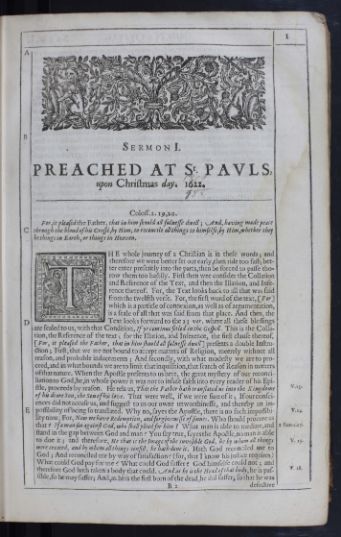 1
Sermon I.
1
Sermon I.
PREACHED AT St. PAVLS,
upon Christmas day. 1622.
Coloss. 1.19, 20.
For, it pleased the Father, that in him should all fulnesse dwell; And, having made peace
through the bloud of his Crosse, by Him, to reconcile all things to himselfe, by Him, whether they
be things in Earth, or things in Heaven.
THEThe whole journey of a Christian is in these words; and
therefore we were better set out early, then ride too fast; bet-
ter enter presently into the parts, then be forced to passe tho-
row them too hastily. First then wee consider the Collation
and Reference of the Text, and then the Illation, and Infe-
rence thereof. For, the Text looks back to all that was said
from the twelfth verse. For, the first word of the text, [For]
which is a particle of connexion, as well as of argumentation,
is a seale of all that was said from that place. And then, the
Text looks forward to the 23 ver. where all these blessings
are sealed to us, with that Condition, If ye continue setled in the Gospell. This is the Colla-
tion, the Reference of the text; for the Illation, and Inference, the first clause thereof,
[For, it pleased the Father, that in him should all fulnesse dwell] presents a double Instru-
ction; First, that we are not bound to accept matters of Religion, meerely without all
reason, and probable inducements; And secondly, with what modesty we are to pro-
ceed, and in what bounds we are to limit that inquisition, that search of Reason in matters
of that nature. When the Apostle presents to us here, the great mystery of our reconci-
liation to God, he, in whose power it was not to infuse faith into every reader of his Epi-
stle, proceeds by reason. He tels us, V. 13. That the Father hath translated us into the Kingdome
of his deare Son, the Son of his love. That were well, if we were sure of it; If our consci-
ences did not accuse us, and suggest to us our owne unworthinesse, and thereby an im-
possibility of being so translated. Why no, sayes the Apostle, V. 14. there is no such impossibi-
lity now, For, Now we have Redemption, and forgivenesse of sinnes. Who should procure us
that? If a man sin against God, who shall plead for him? What man is able to mediate, 1 Sam. 2.25. and
stand in the gap between God and man? You say true, sayes the Apostle, no man is able
to doe it; and therefore, He that is the Image of the invisible God,V. 15. he by whom all things
were created, and by whom all things consist, he hath done it. Hath God reconciled me to
God; And reconciled me by way of satisfaction? (for, that I know his justice requires)
What could God pay for me? What could God suffer? God himselfe could not;V. 18. and
therefore God hath taken a body that could. And as he is the Head of that body, he is pas-
sible, so he may suffer; And, as he is the first born of the dead, he did suffer; so that he was B2 defective
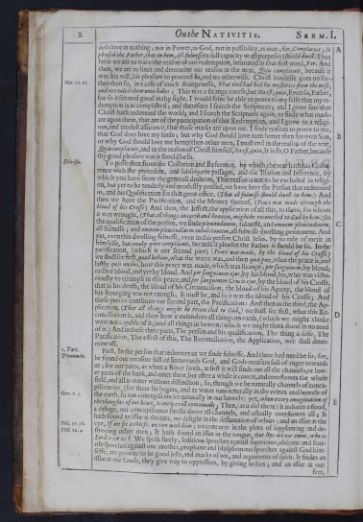 2
On the Nativitie.
Serm. I.
defective in nothing; not in Power, as God, not in passibility, as man; for, Complacuit; It
2
On the Nativitie.
Serm. I.
defective in nothing; not in Power, as God, not in passibility, as man; for, Complacuit; It
pleased the Father, that in him, All fulnesse (a full capacity to all purposes) should dwell. Thus
farre we are to trace the reason of our redemption, intimated in that first word, For. And
then, we are to limit and determine our reason in the next, Quia complacuit, because it
was his will, his pleasure to proceed so, and no otherwise. Christ himselfe goes no far-
ther then so, Mat. 11.25. in a case of much strangenesse, That God had hid his mysteries from the wise,
and revealed them unto babes; This was a strange course, but Ita est, quia, Even so, Father,
for so it seemed good in thy sight. I would faine be able to prove to my selfe that my re-
demption is accomplished; and therefore I search the Scriptures; and I grow sure that
Christ hath redeemed the world; and I search the Scriptures again, to finde what marks
are upon them, that are of the participation of that Redemption, and I grow to a religi-
ous, and modest assurance, that those marks are upon me. I finde reasons to prove to me,
that God does love my soule; but why God should love men better then his own Son,
or why God should love me better then other men, I must end in the reason of the text,
Quia complacuit, and in the reason of Christ himself, Ita est, quia, It is so, O Father, because
thy good pleasure was it should be so. To passe then from the Collation and Reference, Divisio. by which, the text hath his Cohæ-
rence with the precedent, and subsequent passages, and the Illation and Inference, by
which you have seene the generall doctrine, That reason is not to be excluded in religi-
on, but yet to be tenderly and modestly pressed, we have here the Person that redeemed
us, and his Qualification for that great office, (That all fulnesse should dwell in him.) And
then we have the Pacification, and the Meanes thereof, (Peace was made through the
bloud of his Crosse) And then, the Effect, the application of all this, to them, for whom
it was wrought, (That all things in earth and heaven, might be reconciled to God by him.) In
the qualification of the person, we finde plenitudinem, fulnesse, and omnem plenitudinem,
all fulnesse; and omnem plenitudinem inhabitantem, all fulnesse dwelling, permanent. And
yet, even this dwelling fulnesse, even in this person Christ Jesus, by no title of merit in
himselfe, but onely quia complacuit, because it pleased the Father it should be so. In the
pacification, (which is our second part) (Peace was made, by the bloud of his Crosse)
we shall see first, quod bellum, what the warre was, and then quæ pax, what the peace is, and
lastly quis modus, how this peace was made, which was strange; per sanguinem, by bloud;
to save bloud, and yet by bloud. And per sanguinem ejus, by his bloud, his, who was victo-
riously to triumph in this peace; and per sanguinem Crucis ejus, by the bloud of his Crosse,
that is his death; the bloud of his Circumcision, the bloud of his Agony, the bloud of
his scourging was not enough; It must be, and so it was the bloud of his Crosse; And
these peeces constitute our second part, the Pacification: And then in the third, the Ap-
plication, (That all things might be reconciled to God,) we shall see first, what this Re-
conciliation is, and then how it extends to all things on earth, (which we might thinke
were not capable of it;) and all things in heaven, (which we might think stood in no need
of it.) And in these three parts, The person and his qualification, The thing it selfe, The
Pacification, The effect of this, The Reconciliation, the Application, wee shall deter-
mine all. First, 1. Part.
Plenitudo. In the person that redeemes us we finde fulnesse. And there had need be so; for,
he found our measure full of sin towards God, and Gods measure full of anger towards
us; for our parts, as when a River swels, at first it will finde out all the channels, or low-
er parts of the bank, and enter there, but after a while it covers, and overflowes the whole
field, and all is water without distinction; so, though we be naturally channels of concu-
piscencies, (for there sin begins, and as water runs naturally in the veines and bowels of
the earth, Gen. 6.5. so run concupiscencies naturally in our bowels) yet, when every imagination of
the thoughts of our heart, is onely evill continually; Then, (as it did there) it induces a flood,
a deluge, our concupiscence swells above all channels, and actually overflowes all; It
hath found an issue at the eare, we delight in the defamation of others; and an issue at the
eye, Psal. 50.18.
Psal. 12.4. If we see a thiefe, we run with him; we concurre in the plots of supplanting and de-
stroying other men; It hath found an issue in the tongue, Our lips are our owne, who is
Lord over us? We speak freely; seditious speeches against superiours, obscene and scur-
rile speeches against one another, prophane and blasphemous speeches against God him-
selfe, are growne to be good jests, and marks of wit, and arguments of spirit. It findes an
issue at our hands, they give way to oppression, by giving bribes; and an issue at our feet,
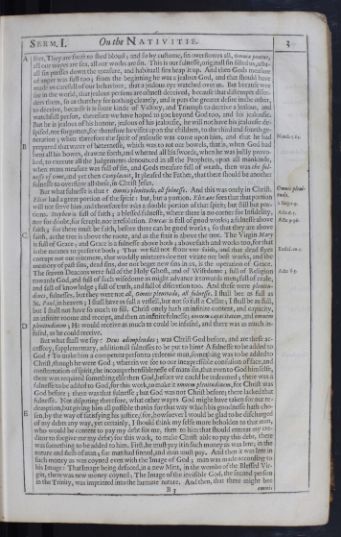 Serm. I.
On the Nativitie.
3
feet, They are swift to shed bloud; and so by custome, sin overflowes all, Omnia pontus,
Serm. I.
On the Nativitie.
3
feet, They are swift to shed bloud; and so by custome, sin overflowes all, Omnia pontus,
all our wayes are sea, all our works are sin. This is our fulnesse, originall sin filled us, actu-
all sin presses down the measure, and habituall sins heap it up. And then Gods measure
of anger was full too; from the beginning he was a jealous God, and that should have
made us carefull of our behaviour, that a jealous eye watched over us. But because wee
see in the world, that jealous persons are oftnest deceived, because that distemper disor-
ders them, so as that they see nothing clearely, and it puts the greater desire in the other,
to deceive, because it is some kinde of Victory, and Triumph to deceive a jealous, and
watchfull person, therefore we have hoped to goe beyond God too, and his jealousie.
But he is jealous of his honour, jealous of his jealousie, he will not have his jealousie de-
spised, nor forgotten, for therefore he visits upon the children, to the third and fourth ge-
neration; when therefore the spirit of jealousie was come upon him, Numb. 5.14. and that he had
prepared that water of bitternesse, which was to rot our bowels, that is, when God had
bent all his bowes, drawne forth, and whetted all his swords, when he was justly provo-
ked, to execute all the Judgements denounced in all the Prophets, upon all mankinde,
when mans measure was full of sin, and Gods measure full of wrath, then was the ful-
nesse of time, and yet then Complacuit, It pleased the Father, that there should be another
fulnesse to overflow all these, in Christ Jesus. But what fulnesse is that? Omnis plenitudo, all fulnesse. And this was onely in Christ.Omnis pleni-
tudo.
Elias had a great portion of the spirit: but, but a portion. Elizæus sees that that portion
2 Reg. 2.9. will not serve him, and therefore he asks a double portion of that spirit; but still but por-
tions. Stephen is full of faith; a blessed fulnesse, where there is no corner for Infidelity, Acts 6.5.
nor for doubt, for scruple, nor irresolution. Dorcas is full of good works; a fulnesse aboveActs 9.36.
faith; for there must be faith, before there can be good works; so that they are above
faith, as the tree is above the roote, and as the fruit is above the tree. The Virgin Mary
is full of Grace; and Grace is a fulnesse above both; above faith and works too, for that
is the meanes to preserve both; That we fall not from our faith, Eccles. 10.1. and that dead flyes
corrupt not our ointment, that worldly mixtures doe not vitiate our best works, and the
memory of past sins, dead sins, doe not beget new sins in us, is the operation of Grace.
The seaven Deacons were full of the Holy Ghost, and of Wisedome;Acts 6.3. full of Religion
towards God, and full of such wisedome as might advance it towards men; full of zeale,
and full of knowledge; full of truth, and full of discretion too. And these were plenitu-
dines, fulnesses, but they were not all, Omnis plenitudo, all fulnesse. I shall bee as full as
St. Paul, in heaven; I shall have as full a vessell, but not so full a Cellar; I shall be as full,
but I shall not have so much to fill. Christ onely hath an infinite content, and capacity,
an infinite roome and receipt, and then an infinite fulnesse; omnem capacitatem, and omnem
plenitudinem; He would receive as much as could be infused, and there was as much in-
fused, as he could receive. But what shall we say? Deus adimplendus; was Christ God before, and are these ac-
cessory, supplementary, additionall fulnesses to be put to him? A fulnesse to be added to
God? To make him a competent person to redeeme man, something was to be added to
Christ, though he were God; wherein we see to our inexpressible confusion of face, and
consternation of spirit, the incomprehensiblenesse of mans sin, that even to God himselfe,
there was required something else then God, before we could be redeemed; there was a
fulnesse to be added to God, for this work, to make it omnem plenitudinem, for Christ was
God before; there was that fulnesse; but God was not Christ before; there lacked that
fulnesse. Not disputing therefore, what other wayes God might have taken for our re-
demption, but giving him all possible thanks for that way which his goodnesse hath cho-
sen, by the way of satisfying his justice, (for, howsoever I would be glad to be discharged
of my debts any way, yet certainly, I should think my selfe more beholden to that man,
who would be content to pay my debt for me, then to him that should entreat my cre-
ditor to forgive me my debt) for this work, to make Christ able to pay this debt, there
was something to be added to him. First, he must pay it in such money as was lent; in the
nature and flesh of man; for man had sinned, and man must pay. And then it was lent in
such money as was coyned even with the Image of God; man was made according to
his Image: That Image being defaced, in a new Mint, in the wombe of the Blessed Vir-
gin, there was new money coyned; The Image of the invisible God, the second person
in the Trinity, was imprinted into the humane nature. And then, that there might bee B3 omnis
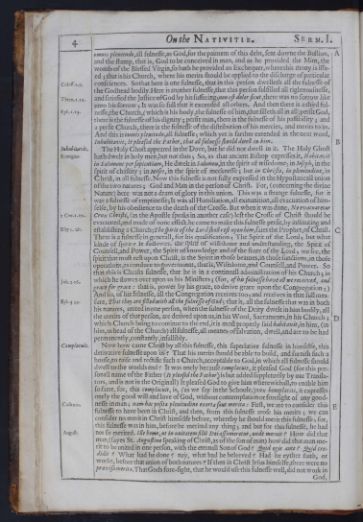 4
On the Nativitie.
Serm. I.
omnis plenitudo, all fulnesse, as God, for the paiment of this debt, sent downe the Bullion,
4
On the Nativitie.
Serm. I.
omnis plenitudo, all fulnesse, as God, for the paiment of this debt, sent downe the Bullion,
and the stamp, that is, God to be conceived in man, and as he provided the Mint, the
womb of the Blessed Virgin, so hath he provided an Exchequer, where this mony is issu-
ed; that is his Church, where his merits should be applied to the discharge of particular
consciences.Coloss. 2.9. So that here is one fulnesse, that in this person dwelleth all the fulnesse of
the Godhead bodily. Here is another fulnesse, that this person fulfilled all righteousnesse,
and satisfied the Justice of God by his suffering;Thren. 1.12. non est dolor sicut, there was no sorrow like
unto his sorrow; It was so full that it exceeded all others. And then there is a third ful-
nesse, the Church, Eph. 1.23. (which is his body, the fulnesse of him, that filleth all in all) perfit God,
there is the fulnesse of his dignity; perfit man, there is the fulnesse of his passibility; and
a perfit Church, there is the fulnesse of the distribution of his mercies, and merits to us.
And this is omnis plenitudo, all fulnesse; which yet is farther extended in the next word,
Inhabitavit, It pleased the Father, that all fulnesse should dwell in him. The Holy Ghost appeared in the Dove, Inhabitavit. but he did not dwell in it. The Holy Ghost
hath dwelt in holy men, but not thus; So, as Remigius. that ancient Bishop expresses it, Habitavit
in Salomone per sapientiam, He dwelt in Salomon, in the spirit of wisedome; in Ioseph, in the
spirit of chastity; in Moses, in the spirit of meeknesse; but in Christo, in plenitudine, in
Christ, in all fulnesse. Now this fulnesse is not fully expressed in the Hypostaticall union
of the two natures; God and Man in the person of Christ. For, (concerning the divine
Nature) here was not a dram of glory in this union. This was a strange fulnesse, for it
was a fulnesse of emptinesse; It was all Humiliation, all exinanition, all evacuation of him-
selfe, by his obedience to the death of the Crosse. But when it was done, Ne evacuaretur
Crux Christi, 1 Cor. 1.17. (as the Apostle speaks in another case) lest the Crosse of Christ should be
evacuated, and made of none effect, he came to make this fulnesse perfit, by instituting and
establishing a Church;Esay 1. ult. The spirit of the Lord shall rest upon him, saies the Prophet, of Christ.
There is a fulnesse in generall, for his qualification; The Spirit of the Lord; but what
kinde of spirit? It followes, the spirit of wisedome and understanding, the Spirit of
Counsell, and Power, the Spirit of knowledge and of the feare of the Lord; we see, the
spirit that must rest upon Christ, is the Spirit in those beames, in those functions, in those
operations, as conduce to government, that is, Wisedome, and Counsell, and Power. So
that this is Christs fulnesse, that he is in a continuall administration of his Church; in
which he flowes over upon us his Ministers;Joh. 1.16. (for, of his fulnesse have all we received, and
grace for grace: that is, power by his grace, to derive grace upon the Congregation;)
And so, of his fulnesse, all the Congregation receives too; and receives in that full mea-
sure, That they are filled with all the fulnesse of God;Eph. 3.19. that is, all the fulnesse that was in both
his natures, united in one person, when the fulnesse of the Deity dwelt in him bodily, all
the merits of that person, are derived upon us, in his Word, Sacraments, in his Church;
which Church being to continue to the end, it is most properly said habitavit, in him, (in
him, as head of the Church) all fulnesse, all meanes of salvation, dwell, and are to be had
permanently, constantly, infallibly. Now how came Christ by all this fulnesse, Complacuit. this superlative fulnesse in himselfe, this
derivative fulnesse upon us? That his merits should be able to build, and furnish such a
house, to raise and rectifie such a Church, acceptable to God, in which all fulnesse should
dwell to the worlds end? It was onely because complacuit, it pleased God (for this per-
sonall name of the Father (It pleased the Father) is but added suppletorily by our Transla-
tors, and is not in the Originall) It pleased God to give him wherewithall, to enable him
so farre, for, this complacuit, is, (as we say in the Schoole,) vox beneplaciti, it expresses
onely the good will and love of God, without contemplation or foresight of any good-
nesse in man;Catharin. nam hac posita plenitudine exorta sunt merita: First, we are to consider this
fulnesse to have been in Christ, and then, from this fulnesse arose his merits; we can
consider no merit in Christ himselfe before, whereby he should merit this fulnesse; for,
this fulnesse was in him, before he merited any thing; and but for this fulnesse, he had
not so merited.August. Ille homo, ut in unitatem filii Dei assumeretur, unde meruit? How did that
man, (sayes St. Augustine speaking of Christ, as of the son of man) how did that man me-
rit to be united in one person, with the eternall Son of God? Quid egit ante? Quid cre-
didit? What had he done? nay, what had he beleeved? Had he eyther faith, or
works, before that union of both natures? If then in Christ Jesus himselfe, there were no
prævisa merita, That Gods fore-sight, that he would use this fulnesse well, did not work in God,
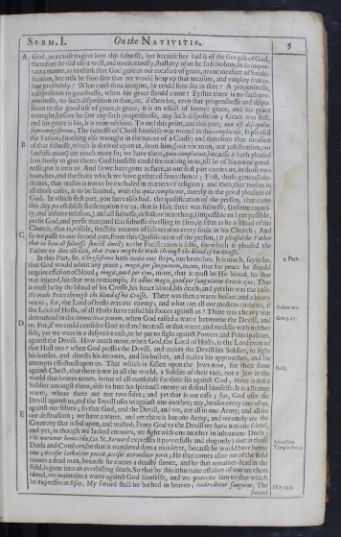 Serm. I.
On the Nativitie.
5
God, as a cause to give him this fulnesse, but because hee had it of the free gift of God,
Serm. I.
On the Nativitie.
5
God, as a cause to give him this fulnesse, but because hee had it of the free gift of God,
therefore he did use it well, and meritoriously, shall any of us be so frivolous, in so impor-
tant a matter, as to think that God gave us our measure of grace, or our measure of Sancti-
fication, because he fore-saw that we would heap up that measure, and employ that ta-
lent profitably? What canst thou imagine, he could fore-see in thee? A propensnesse,
a disposition to goodnesse, when his grace should come? Eyther there is no such pro-
pensnesse, no such disposition in thee, or, if there be, even that propensnesse and dispo-
sition to the good use of grace, is grace, it is an effect of former grace, and his grace
wrought, before he saw any such propensnesse, any such disposition; Grace was first,
and his grace is his, it is none of thine. To end this point, and this part, non est discipulus
supra magistrum; The fulnesse of Christ himselfe was rooted in the complacuit, It pleased
the Father; (nothing else wrought in the nature of a Cause) and therefore that measure
of that fulnesse, which is derived upon us, from him, (our vocation, our justification, our
sanctification) are much more so; we have them, quia complacuit, because it hath pleased
him freely to give them; God himselfe could see nothing in us, till he of his owne good-
nesse, put it into us. And so we have gone as farre, as our first part carries us, in those two
branches, and the fruits which we have gathered from thence; First, those generall do-
ctrines, that reason is not to be excluded in matters of religion; and then, that reason in
all those cases, is to be limited, with the quia complacuit, meerly in the good pleasure of
God. In which first part, you have also had, the qualification of the person, that came
this day, to establish Redemption for us, that in Him there was fulnesse, (infinite capaci-
ty, and infinite infusion,) and all fulnesse, defective in nothing, (impassible and yet passible,
perfit God, and perfit man) and this fulnesse dwelling in Him, in Him as he is Head of the
Church, that is, visible, sensible meanes of salvation to every soule in his Church; And
so we passe to our second part, from this Qualification of the person, (It pleased the Father
that in him all fulnesse should dwell) to the Pacification it selfe, for which it pleased the
Father to doe all this, that Peace might be made through the bloud of his Crosse. In this Part, St. Chrysostome hath made our steps, our branches. It is much, sayes he, 2 Part.
that God would admit any peace; magis, per sanguinem, more, that for peace he should
require effusion of bloud; magis, quod per ejus, more, that it must be His bloud, his that
was injured, his that was to triumph; Et adhucad huc magis, quod per sanguinem Crucis ejus; That
it must be by the bloud of his Crosse, his heart bloud, his death; and yet this was the case;
He made Peace through the bloud of his Crosse. There was then a warre before, and a heavy
warre; for, the Lord of hosts was our enemy; and what can all our musters come to, Bellum ante. if
the Lord of Hosts, of all Hosts have raised his forces against us? There was a heavy war
denounced in the Inimicitias ponam, when God raised a warre betweene the Devill, Gen. 3.15. and
us. For, if we could consider God to stand neutrall in that warre, and meddle with neither
side, yet we were in a desperate case, to be put to fight against Powers and Principalities,
against the Devill. How much more, when God, the Lord of Hosts, is the Lord even of
that Host too? when God presses the Devill, and makes the Devill his Soldier, to fight
his battles, and directs his arrowes, and his bullets, and makes his approaches, and his
attempts effectuall upon us. That which is fallen upon the Jews now, Basil. for their sinne
against Christ, that there is not in all the world, a Soldier of their race, not a Jew in the
world that beares armes, is true of all mankinde for their sin against God; there is not a
Soldier amongst them, able to hurt his spirituall enemy or defend himselfe. It is a strange
warre, where there are not two sides; and yet that is our case; for, God uses the
Devill against us, and the Devill uses us against one another; nay, he uses every one of us,
against our selves; so that God, and the Devill, and we, are all in one Army, and all for
our destruction; we have a warre, and yet there is but one Army, and we onely are the
Countrey that is fed upon, and wasted; From God to the Devill we have not one friend,
and yet, as though we lacked enemies, we fight with one another in inhumane Duels;
Vbi morimur homicidæ, Ad milites
Templa: Ser. 1. (as St. Bernard expresses it powerfully and elegantly) that in those
Duels and Combats, he that is murdered dyes a murderer, because he would have beene
one; Occisor læthaliter peccat, occisus æternaliter perit; He that comes alive out of the field
comes a dead man, because he comes a deadly sinner, and he that remaines dead in the
field, is gone into an everlasting death. So that by this inhumane effusion of one anothers
bloud, we maintaine a warre against God himselfe, and we provoke him to that which
he expresses in Esay, My sword shall be bathed in heaven; Inebriabitur sanguine, Esay 34.5. The sword
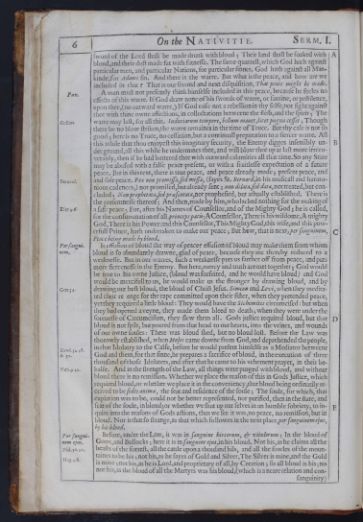 6
On the Nativitie.
Serm. I.
sword of the Lord shall be made drunk with bloud; Their land shall be soaked with
6
On the Nativitie.
Serm. I.
sword of the Lord shall be made drunk with bloud; Their land shall be soaked with
bloud, and their dust made fat with fatnesse. The same quarrell, which God hath against
particular men, and particular Nations, for particular sinnes, God hath against all Man-
kinde, for Adams sin. And there is the warre. But what is the peace, and how are we
included in that? That is our second and next disquisition, That peace might be made. A man must not presently think himselfe included in this peace, Pax. because he feeles no
effects of this warre. If God draw none of his swords of warre, or famine, or pestilence,
upon thee, (no outward warre,) If God raise not a rebellion in thy selfe, nor fight against
thee with thine owne affections, in colluctations betweene the flesh, and the spirit; The
warre may last, Gellius. for all this. Induciarum tempore, bellum manet, licet pugna cesset; Though
there be no blow striken, the warre remaines in the time of Truce. But thy case is not so
good; here is no Truce, no cessation, but a continuall preparation to a fiercer warre. All
this while that thou enjoyest this imaginary security, the Enemy digges insensibly un-
der ground, all this while he undermines thee, and will blow thee up at last more irreco-
verably, then if he had battered thee with outward calamities all that time. So any State
may be abused with a false peace present, or with a fruitlesse expectation of a future
peace. But in this text, there is true peace, and peace already made; present peace, and
and safe peace.Bernard. Pax non promissa, sed missa, (sayes St. Bernard, in his musicall and harmo-
nious cadences,) not promised, but already sent; non dilata, sed data, not treated, but con-
cluded; Non prophetata, sed præsentata, not prophesied, but actually established. There is
the presentnesse thereof; And then, made by him, who lacked nothing for the making of
a safe peace;Esay 9.6. For, after his Names of Counsellor, and of the Mighty God; he is called,
for the consummation of all, princeps pacis; A Counsellor, There is his wisdome, A mighty
God, There is his Power: and this Counsellor, This Mighty God, this wise, and this pow-
erfull Prince, hath undertaken to make our peace; But how, that is next, per sanguinem,
Peace being made by bloud. Is effusion of bloud the way of peace?Per sangui-
nem. effusion of bloud may make them from whom
bloud is so abundantly drawne, glad of peace, because they are thereby reduced to a
weaknesse. But in our warres, such a weaknesse puts us farther off from peace, and puts
more fiercenesse in the Enemy. But here, mercy and truth are met together; God would
be true to his owne Justice, (bloud was forfeited, and he would have bloud) and God
would be mercifull to us, he would make us the stronger by drawing bloud, and by
drawing our best bloud, Gen. 34. the bloud of Christ Jesus. Simeon and Levi, when they medita-
ted their revenge for the rape committed upon their sister, when they pretended peace,
yet they required a little bloud: They would have the Sichemites circumcised: but when
they had opened a veyne, they made them bleed to death; when they were under the
sorenesse of Circumcision, they slew them all. Gods justice required bloud, but that
bloud is not spilt, but poured from that head to our hearts, into the veines, and wounds
of our owne soules: There was bloud shed, but no bloud lost. Before the Law was
thorowly established, when Moses came downe from God, and deprehended the people,
in that Idolatry to the Calfe, before he would present himselfe as a Mediator betweene
God and them, Exod. 32.28.
& 32. for that sinne, he prepares a sacrifice of bloud, in the execution of three
thousand of those Idolaters, and after that he came to his vehement prayer, in their be-
halfe. And in the strength of the Law, Heb. 9 22. all things were purged with bloud, and without
bloud there is no remission. Whether we place the reason of this in Gods Justice, which
required bloud, or whether we place it in the conveniency, that bloud being ordinarily re-
ceived to be sedes animæ, the seat and residence of the soule; The soule, for which, that
expiation was to be, could not be better represented, nor purified, then in the state, and
seat of the soule, in bloud; or whether we shut up our selves in an humble sobriety, to in-
quire into the reasons of Gods actions, thus we see it was, no peace, no remission, but in
bloud. Nor is that so strange, as that which followes in the next place, per sanguinem ejus,
by his bloud. Before, Per sangui-
nem ejus. under the Law, it was in sanguine hircorum, & vitulorum; In the bloud of
Goats, and Bullocks; here it is in sanguine ejus, in his bloud. Not his, as he claims all the
beasts of the forrest, Psal. 50.10. all the cattle upon a thousand hils, and all the fowles of the moun-
taines to be his; not his, as he sayes of Gold and Silver, The Silver is mine, and the Gold
is mine;Hag. 2.8. not his, as he is Lord, and proprietary of all, by Creation; so all bloud is his; no
nor his, as the bloud of all the Martyrs was his bloud, (which is a neare relation and con sanguinity)
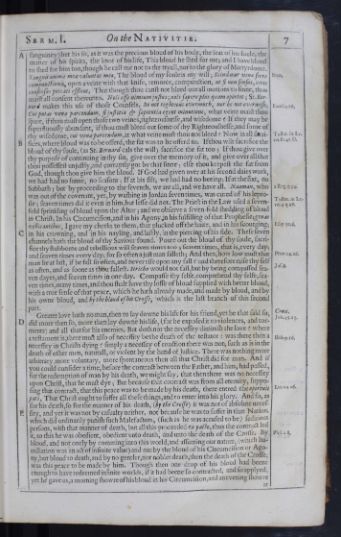 Serm. I.
On the Nativitie.
7
sanguinity) but his so, as it was the precious bloud of his body, the seat of his soule, the
Serm. I.
On the Nativitie.
7
sanguinity) but his so, as it was the precious bloud of his body, the seat of his soule, the
matter of his spirits, the knot of his life, This bloud he shed for me; and I have bloud
to shed for him too, though he call me not to the tryall, nor to the glory of Martyrdome.
Sanguis animæ meæ voluntas mea, The bloud of my soule is my will; Bern. Scindatur vena ferro
compunctionis, open a veine with that knife, remorce, compunction, ut si non sensus, certe
consensus peccati effluat, That though thou canst not bleed out all motions to sinne, thou
maist all consent thereunto. Noli esse nimium justus; noli sapere plus quam oportet; St. Ber-
nard makes this use of those Counsels, Be not righteous overmuch, nor be not overwise, Ecces.Eccles. 7.16.
Cui putas venæ parcendum, si justitia & sapientia egent minutione, what veine maist thou
spare, if thou must open those two veines, righteousnesse, and wisedome? If they may be
superfluously abundant, if thou must bleed out some of thy Righteousnesse, and some of
thy wisedome, cui venæ parcendum, at what veine must thou not bleed? Tostat. in Le-
vit. fo. 45. D. Now in all sacri-
fices, where bloud was to be offerd, the fat was to be offerd to. If thou wilt sacrifice the
bloud of thy soule, (as St. Bernard cals the will) sacrifice the fat too; If thou give over
thy purpose of continuing in thy sin, give over the memory of it, and give over all that
thou possessest unjustly, and corruptly got by that sinne; else thou keepest the fat from
God, though thou give him the bloud. If God had given over at his second daies work,
we had had no sunne, no seasons; If at his fift, we had had no beeing; If at the sixt, no
Sabbath; but by proceeding to the seventh, we are all, and we have all. Naaman, 2 Reg. 5.14. who
was out of the covenant, yet, by washing in Jordan seven times, was cured of his lepro-
sie; seaven times did it even in him, but lesse did not.Tostat. in Le-
vit. 4. q. 16. The Priest in the Law used a seven-
fold sprinkling of bloud upon the Altar; and we observe a seven-fold shedding of bloud
in Christ; In his Circumcision, and in his Agony, in his fulfilling of that Prophesie; genas
vellicantibus, I gave my cheeks to them, that plucked off the haire, and in his scourging; Esay 50.6.
in his crowning, and in his nayling, and lastly, in the piercing of his side. These seven
channels hath the bloud of thy Saviour found. Poure out the bloud of thy soule, sacri-
fice thy stubborne and rebellious will seaven times too; seaven times, that is, every day;
and seaven times every day; for so often a just man falleth; And then, Prov. 24.16. how low must that
man lie at last, if he fall so often, and never rise upon any fall? and therefore raise thy self
as often, and as soone as thou fallest. Iericho would not fall, Jos. 6. but by being compassed sea-
ven dayes, and seaven times in one day. Compasse thy selfe, comprehend thy selfe, sea-
ven times, many times, and thou shalt have thy losse of bloud supplied with better bloud,
with a true sense of that peace, which he hath already made, and made by bloud, and by
his owne bloud, and by the bloud of his Crosse, which is the last branch of this second
part. Greater love hath no man, then to lay downe his life for his friend, yet he that said so, Crux.
did more then so, more then lay downe his life, (for he exposed it to violences, Joh. 15.13. and tor-
ments) and all that for his enemies. But doth not the necessity diminish the love? where
a testament is, there must also of necessity be the death of the testator:Heb. 9.16. was there then a
necessity in Christs dying? simply a necessity of coaction there was not; such as is in the
death of other men, naturall, or violent by the hand of Justice. There was nothing more
arbitrary, more voluntary, more spontaneous then all that Christ did for man. And if
you could consider a time, before the contract between the Father, and him, had passed,
for the redemption of man by his death, we might say, that then there was no necessity
upon Christ, that he must dye; But because that contract was from all eternity, suppo-
sing that contract, that this peace was to be made by his death, there entred theLuc. 24.26. oportuit
pati, That Christ ought to suffer all these things, and to enter into his glory. And so, as
for his death, so for the manner of his death, (by the Crosse) it was not of absolute neces-
sity, and yet it was not by casualty neither, not because he was to suffer in that Nation,
which did ordinarily punish such Malefactors, (such as he was accused to be) seditious
persons, with that manner of death, but all this proceeded ex pacto, thus the contract led
it, to this he was obedient, obedient unto death, and unto the death of the Crosse.Phil. 2.8. By
bloud, and not onely by comming into this world, and assuming our nature, (which hu-
miliation was an act of infinite value) and not by the bloud of his Circumcision or Ago-
ny, but bloud to death, and by no gentler, nor nobler death, then the death of the Crosse,
was this peace to be made by him. Though then one drop of his bloud had beene
enough to have redeemed infinite worlds, if it had beene so contracted, and so applyed,
yet he gave us, a morning showre of his bloud in his Circumcision, and an evening showre at
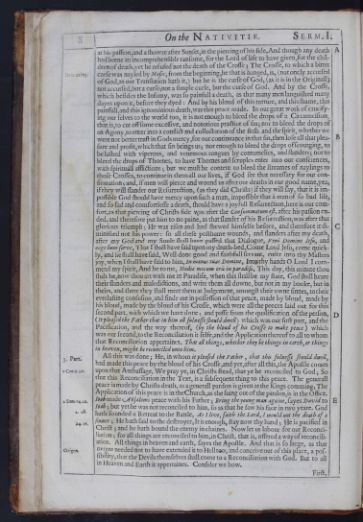 8
On the Nativitie.
Serm. I.
at his passion, and a showre after Sunset, in the piercing of his side. And though any death
8
On the Nativitie.
Serm. I.
at his passion, and a showre after Sunset, in the piercing of his side. And though any death
had beene an incomprehensible ransome, for the Lord of life to have given, for the chil-
dren of death, yet he refused not the death of the Crosse; The Crosse, to which a bitter
curse was nayled by Moses,Deut. 21. 23. from the beginning, he that is hanged, is, (not onely accursed
of God, as our Translation hath it,) but he is the curse of God, (as it is in the Originall)
not accursed, but a curse; not a simple curse, but the curse of God. And by the Crosse,
which besides the Infamy, was so painfull a death, as that many men languished many
dayes upon it, before they dyed: And by his bloud of this torture, and this shame, this
painfull, and this ignominious death, was this peace made. In our great work of crucify-
ing our selves to the world too, it is not enough to bleed the drops of a Circumcision,
that is, to cut off some excessive, and notorious practice of sin; nor to bleed the drops of
an Agony, to enter into a conflict and colluctation of the flesh and the spirit, whether we
were not better to trust in Gods mercy, for our continuance in that sin, then lose all that plea-
sure and profit, which that sin brings us; nor enough to bleed the drops of scourging, to
be lashed with viperous, and venemous tongues by contumelies, and slanders; nor to
bleed the drops of Thornes, to have Thornes and scruples enter into our consciences,
with spirituall afflictions; but we must be content to bleed the streames of naylings to
those Crosses, to continue in them all our lives, if God see that necessary for our con-
firmation; and, if men will pierce and wound us after our deaths in our good name, yea,
if they will slander our Resurrection, (as they did Christs) if they will say, that it is im-
possible God should have mercy upon such a man, impossible that a man of so bad life,
and so sad and comfortlesse a death, should have a joyfull Resurrection, here is our com-
fort, as that piercing of Christs side was after the Consummatum est, after his passion en-
ded, and therefore put him to no paine, as that slander of his Resurrection, was after that
glorious triumph; He was risen and had shewed himselfe before, and therefore it di-
minished not his power: so all these posthume wounds, and slanders after my death,
after my God and my Soule shall have passed that Dialogue, Veni Domine Iesu, and
euge bone serve, That I shall have said upon my death-bed, Come Lord Jesu, come quick-
ly, and he shall have said, Well done good and faithfull servant, enter into thy Masters
joy, when I shall have said to him, In manus tuas Domine, Into thy hands O Lord I com-
mend my spirit, And he to me, Hodie mecum eris in paradiso, This day, this minute thou
shalt be, now thou art with me in Paradise, when this shall be my state, God shall heare
their slanders and maledictions, and write them all downe, but not in my booke, but in
theirs, and there they shall meet them at Judgement, amongst their owne sinnes, to their
everlasting confusion, and finde me in possession of that peace, made by bloud, made by
his bloud, made by the bloud of his Crosse, which were all the peeces laid out for this
second part, with which we have done; and passe from the qualification of the person,
(It pleased the Father that in him all fulnesse should dwell) which was our first part, and the
Pacification, and the way thereof, (by the bloud of his Crosse to make peace) which
was our second, to the Reconciliation it selfe, and the Application thereof to all to whom
that Reconciliation appertaines, That all things, whether they be things in earth, or things
in heaven, might be reconciled unto him. All this was done;3. Part. He, in whom it pleased the Father, that this fulnesse should dwell,
had made this peace by the bloud of his Crosse, and yet, after all this, the Apostle comes
upon that Ambassage, 2 Cor. 5.20. We pray ye, in Christs stead, that ye be reconciled to God; So
that this Reconciliation in the Text, is a subsequent thing to this peace. The generall
peace is made by Christs death, as a generall pardon is given at the Kings comming; The
Application of this peace is in the Church, as the suing out of the pardon, is in the Office.
2 Sam. 14.22 Ioab made Absaloms peace with his Father; Bring the young man againe, sayes David to
Ioab;2.28 but yet he was not reconciled to him, so as that he saw his face in two yeare. God
hath sounded a Retreat to the Battle, As I live, saith the Lord, I would not the death of a
sinner; 24.16. He hath said to the destroyer, It is enough, stay now thy hand; He is pacified in
Christ; and he hath bound the enemy in chaines. Now let us labour for our Reconci-
liation; for all things are reconciled to him, in Christ, that is, offered a way of reconcili-
ation. All things in heaven and earth, sayes the Apostle. And that is so large, as that
Origen needed not to have extended it to Hell too, Origen. and conceive out of this place, a pos-
sibility, that the Devils themselves shall come to a Reconciliation with God. But to all
in Heaven and Earth it appertaines. Consider we how. First,
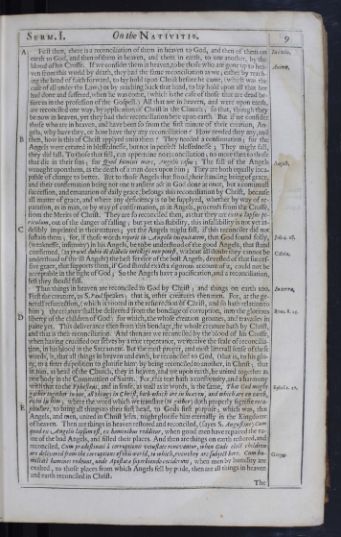 Serm. I.
On the Nativitie.
9
Serm. I.
On the Nativitie.
9
First then, there is a reconciliation of them in heaven to God, In cœlis. and then of them on
earth to God, and then of them in heaven, and them in earth, to one another, by the
blood of his Crosse. Animæ. If we consider them in heaven, to be those who are gone up to hea-
ven from this world by death, they had the same reconciliation as we; either by reach-
ing the hand of faith forward, to lay hold upon Christ before he came, (which was the
case of all under the Law;) or by reaching back that hand, to lay hold upon all that hee
had done and suffered, when he was come, (which is the case of those that are dead be-
fore us in the profession of the Gospell.) All that are in heaven, and were upon earth,
are reconciled one way, by application of Christ in the Church; so that, though they
be now in heaven, yet they had their reconciliation here upon earth. But if we consider
those who are in heaven, and have been so from the first minute of their creation, An-
gels, why have they, or how have they any reconciliation? How needed they any, and
then, how is this of Christ applyed unto them? They needed a confirmation; for the
Angels were created in blessednesse, but not in perfect blessednesse; They might fall,
they did fall. To those that fell, can appertaine no reconciliation; no more then to those
that die in their sins; for Quod homini mors, Angelis casus;August. The fall of the Angels
wrought upon them, as the death of a man does upon him; They are both equally inca-
pable of change to better. But to those Angels that stood, their standing being of grace,
and their confirmation being not one transient act in God done at once, but a continuall
succession, and emanation of daily grace, belongs this reconciliation by Christ, because
all matter of grace, and where any deficiency is to be supplyed, whether by way of re-
paration, as in man, or by way of confirmation, as in Angels, proceeds from the Crosse,
from the Merits of Christ. They are so reconciled then, as that they are extra lapsus pe-
riculum, out of the danger of falling; but yet this stability, this infallibility is not yet in-
delibly imprinted in their natures; yet the Angels might fall, if this reconciler did not
sustain them; for, if those words reperit in Angelis iniquitatem, that God found folly, Job 4.18.
(weaknesse, infirmity) in his Angels, be to be understood of the good Angels, that stand
confirmed, (as procul dubio de diabolo intelligi non potest, Calvin. without all doubt they cannot be
understood of the ill Angels) the best service of the best Angels, devested of that succes-
sive grace, that supports them, if God should exact a rigorous account of it, could not be
acceptable in the sight of God; So the Angels have a pacification, and a reconciliation,
lest they should fall. Thus things in heaven are reconciled to God by Christ; and things on earth too. In terra.
First the creature, as S. Paul speakes; that is, other creatures then men. For, at the ge-
nerall resurrection, (which is rooted in the resurrection of Christ, and so hath relation to
him) the creature shall be delivered from the bondage of corruption, Rom. 8.21. into the glorious
liberty of the children of God; for which, the whole creation groanes, and travailes in
paine yet. This deliverance then from this bondage, the whole creature hath by Christ,
and that is their reconciliation. And then are we reconciled by the blood of his Crosse,
when having crucified our selves by a true repentance, we receive the seale of reconcilia-
tion, in his blood in the Sacrament. But the most proper, and most litterall sense of these
words, is, that all things in heaven and earth, be reconciled to God, (that is, to his glo-
ry, to a fitter disposition to glorifie him) by being reconciled to another, in Christ; that
in him, as head of the Church, they in heaven, and we upon earth, be united together as
one body in the Communion of Saints. For, this text hath a conformity, and a harmony
with that to the Ephesians, and in sense, as well as in words, is the same, Ephes. 1.10. That God might
gather together in one, all things in Christ, both which are in heaven, and which are on earth,
even in him; where the word which we translate (to gather) doth properly signifie reca-
pitulare, to bring all things to their first head, to Gods first purpose; which was, that
Angels, and men, united in Christ Jesus, might glorifie him eternally in the Kingdome
of heaven. Then are things in heaven restored and reconciled, (sayes S. Augustine) Cum
quod ex Angelis lapsum est, ex hominibus redditur, when good men have repaired the ru-
ine of the bad Angels, and filled their places. And then are things on earth restored, and
reconciled, Cum prædestinati à corruptionis vetustate renovantur, when Gods elect children
are delivered from the corruptions of this world, to which, even they are subject here.Gregor. Cum hu-
miliati homines redeunt, unde Apostatæ superbiendo ceciderunt, when men by humility are
exalted, to those places from which Angels fell by pride, then are all things in heaven
and earth reconciled in Christ. The
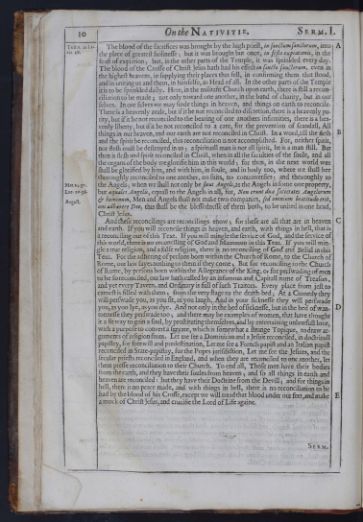 10
On the Nativitie.
Serm. I.
The blood of the sacrifices was brought by the high priest, Tostat. in Le-
10
On the Nativitie.
Serm. I.
The blood of the sacrifices was brought by the high priest, Tostat. in Le-vit. 16. in sanctum sanctorum, into
the place of greatest holinesse; but it was brought but once, in festo expiationis, in the
feast of expiation; but, in the other parts of the Temple, it was sprinkled every day.
The blood of the Crosse of Christ Jesus hath had his effect in sancto sanctorum, even in
the highest heavens, in supplying their places that fell, in confirming them that stood,
and in uniting us and them, in himselfe, as Head of all. In the other parts of the Temple
it is to be sprinkled daily. Here, in the militant Church upon earth, there is still a recon-
ciliation to be made; not only toward one another, in the band of charity, but in our
selves. In our selves we may finde things in heaven, and things on earth to reconcile.
There is a heavenly zeale, but if it be not reconciled to discretion, there is a heavenly pu-
rity, but if it be not reconciled to the bearing of one anothers infirmities, there is a hea-
venly liberty, but if it be not reconciled to a care, for the prevention of scandall, All
things in our heaven, and our earth are not reconciled in Christ. In a word, till the flesh
and the spirit be reconciled, this reconciliation is not accomplished. For, neither spirit,
nor flesh must be destroyed in us; a spirituall man is not all spirit, he is a man still. But
then is flesh and spirit reconciled in Christ, when in all the faculties of the soule, and all
the organs of the body we glorifie him in this world; for then, in the next world wee
shall be glorified by him, and with him, in soule, and in body too, where we shall bee
thoroughly reconciled to one another, no suits, no controversies; and thoroughly to
the Angels;Mat. 22.30. when we shall not only be sicut Angeli, as the Angels in some one property,
Luc. 20.36. but æquales Angelis, equall to the Angels in all, for, Non erunt duæ societates Angelorum
& hominum, Men and Angels shall not make two companies, sed omnium beatitudo erit,
uni adhærere Deo, August. this shall be the blessednesse of them both, to be united in one head,
Christ Jesus. And these reconcilings are reconcilings enow; for these are all that are in heaven
and earth. If you will reconcile things in heaven, and earth, with things in hell, that is
a reconciling out of this Text. If you will mingle the service of God, and the service of
this world, there is no reconciling of God and Mammon in this Text. If you will min-
gle a true religion, and a false religion, there is no reconciling of God and Belial in this
Text. For the adhering of persons born within the Church of Rome, to the Church of
Rome, our law sayes nothing to them if they come; But for reconciling to the Church
of Rome, by persons born within the Allegeance of the King, or for perswading of men
to be so reconciled, our law hath called by an infamous and Capitall name of Treason,
and yet every Tavern, and Ordinary is full of such Traitors. Every place from jest to
earnest is filled with them; from the very stage to the death-bed; At a Comedy they
will perswade you, as you sit, as you laugh, And in your sicknesse they will perswade
you, as you lye, as you dye. And not only in the bed of sicknesse, but in the bed of wan-
tonnesse they perswade too; and there may be examples of women, that have thought
it a fit way to gain a soul, by prostituting themselves, and by entertaining unlawfull love,
with a purpose to convert a servant, which is somewhat a strange Topique, to draw ar-
guments of religion from. Let me see a Dominican and a Jesuit reconciled, in doctrinall
papistry, for freewill and predestination, Let me see a French papist and an Italian papist
reconciled in State-papistry, for the Popes jurisdiction, Let me see the Jesuits, and the
secular priests reconciled in England, and when they are reconciled to one another, let
them presse reconciliation to their Church. To end all, Those men have their bodies
from the earth, and they have their soules from heaven; and so all things in earth and
heaven are reconciled: but they have their Doctrine from the Devill; and for things in
hell, there is no peace made, and with things in hell, there is no reconciliation to be
had by the blood of his Crosse, except we will tread that blood under our feet, and make
a mock of Christ Jesus, and crucifie the Lord of Life againe. Serm.
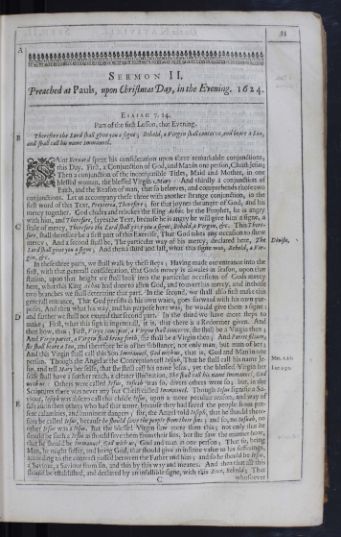
Sermon II.
Preached at Pauls, upon Christmas Day, in the Evening. 1624.
Esaiah. 7.14.
Part of the first Lesson, that Evening.
Therefore the Lord shall give you a signe; Behold, a Virgin shall conceive, and beare a Son,
and shall call his name Immanuel.
SAint Bernard spent his consideration upon three remarkable conjunctions,
this Day. First, a Conjunction of God, and Man in one person, Christ Jesus;
Then a conjunction of the incompatible Titles, Maid and Mother, in one
blessed woman, the blessed Virgin Mary: And thirdly a conjunction of
Faith, and the Reason of man, that so beleeves, and comprehends those two
conjunctions. Let us accompany these three with another strange conjunction, in the
first word of this Text, Propterea, Therefore; for that joynes the anger of God, and his
mercy together. God chides and rebukes the King Achaz by the Prophet, he is angry
with him, and Therefore, sayes the Text, because he is angry he will give him a signe, a
seale of mercy, Therefore the Lord shall give you a signe, Behold, a Virgin, &c. This There-
fore, shall therefore be a first part of this Exercise, That God takes any occasion to shew
mercy; And a second shall be, The particular way of his mercy, declared here, Divisio. The
Lord shall give you a signe; And then a third and last, what this signe was, Behold, a Vir-
gin, &c.
In these three parts, we shall walk by these steps; Having made our entrance into the
first, with that generall consideration, that Gods mercy is alwaies in season, upon that
station, upon that height we shall look into the particular occasions of Gods mercy
here, what this King Achaz had done to alien God, and to avert his mercy, and in those
two branches we shall determine that part. In the second, we shall also first make this
generall entrance, That God persists in his own waies, goes forward with his own pur-
poses, And then what his way, and his purpose here was, he would give them a signe:
and farther we shall not extend that second part. In the third we have more steps to
make; First, what this sign is in generall, it is, that there is a Redeemer given. And
then how, thus; First, Virgo concipiet, a Virgin shall conceive, she shall be a Virgin then;
And Virgo pariet, a Virgin shall bring forth, she shall be a Virgin then; And Pariet filium,
she shall beare a Son, and therefore he is of her substance, not only man, but man of her;
And this Virgin shall call this Son Immanuel, God with us, that is, God and Man in one
person. Though the Angel at the Conception tell Ioseph, That he shall call his name Mat. 1.21. Je-
sus, and tell Mary her selfe, that she shall call his name Jesus, Luc. 1.31. yet the blessed Virgin her
selfe shall have a further reach, a clearer illustration, She shall call his name Immanuel, God
with us: Others were called Iesus, Iosuah was so, divers others were so; but, in the
Scriptures there was never any but Christ called Immanuel. Though Iesus signifie a Sa-
viour, Ioseph was able to call this childe Iesus, upon a more peculiar reason, and way of
salvation then others who had that name, because they had saved the people from pre-
sent calamities, and imminent dangers; for, the Angel told Ioseph, that he should there-
fore be called Iesus, because he should save the people from their sins; and so, no Iosuah, no
other Iesus was a Iesus. But the blessed Virgin saw more then this; not only that he
should be such a Iesus as should save them from their sins, but she saw the manner how,
that he should be Immanuel, God with us, God and man in one person; That so, being
Man, he might suffer, and being God, that should give an infinite value to his sufferings,
according to the contract passed between the Father and him; and so he should be Iesus,
a Saviour, a Saviour from sin, and this by this way and meanes. And then that all this
should be established, and declared by an infallible signe, with this Ecce, Behold; That C whosoever
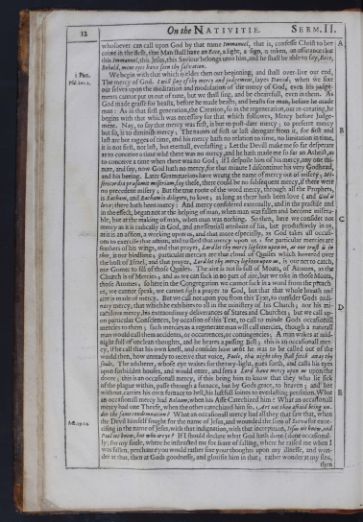 12
On the Nativitie.
Serm. II.
whosoever can call upon God by that name Immanuel, that is, confesse Christ to bee
12
On the Nativitie.
Serm. II.
whosoever can call upon God by that name Immanuel, that is, confesse Christ to bee
come in the flesh, that Man shall have an Ecce, a light, a sign, a token, an assurance that
this Immanuel, this Jesus, this Saviour belongs unto him, and he shall be able to say, Ecce,
Behold, mine eyes have seen thy salvation.
We begin with that which is elder then our beginning, 1 Part.
Psal. 101.1. and shall over-live our end,
The mercy of God. I will sing of thy mercy and judgement, sayes David; when we fixe
our selves upon the meditation and modulation of the mercy of God, even his judge-
ments cannot put us out of tune, but we shall sing, and be chearefull, even in them. As
God made grasse for beasts, before he made beasts, and beasts for man, before he made
man: As in that first generation, the Creation, so in the regeneration, our re-creating, he
begins with that which was necessary for that which followes, Mercy before Judge-
ment. Nay, to say that mercy was first, is but to post-date mercy; to preferre mercy
but so, is to diminish mercy; The names of first or last derogate from it, for first and
last are but ragges of time, and his mercy hath no relation to time, no limitation in time,
it is not first, nor last, but eternall, everlasting; Let the Devill make me so far desperate
as to conceive a time whē there was no mercy, and he hath made me so far an Atheist, as
to conceive a time when there was no God; if I despoile him of his mercy, any one mi-
nute, and say, now God hath no mercy, for that minute I discontinue his very Godhead,
and his beeing. Later Grammarians have wrung the name of mercy out of misery; Mi-
sericordia præsumit miseriam, say these, there could be no subsequent mercy, if there were
no precedent misery; But the true roote of the word mercy, through all the Prophets,
is Racham, and Racham is diligere, to love; as long as there hath been love (and God is
love) there hath been mercy: And mercy considered externally, and in the practise and
in the effect, began not at the helping of man, when man was fallen and become misera-
ble, but at the making of man, when man was nothing. So then, here we consider not
mercy as it is radically in God, and an essentiall attribute of his, but productively in us,
as it is an action, a working upon us, and that more especially, as God takes all occasi-
ons to exercise that action, and to shed that mercy upon us: for particular mercies are
feathers of his wings, and that prayer, Lord let thy mercy lighten upon us, as our trust is in
thee, is our birdlime; particular mercies are that cloud of Quailes which hovered over
the host of Israel, and that prayer, Lord let thy mercy lighten upon us, is our net to catch,
our Gomer to fill of those Quailes. The aire is not so full of Moats, of Atomes, as the
Church is of Mercies; and as we can suck in no part of aire, but we take in those Moats,
those Atomes; so here in the Congregation we cannot suck in a word from the preach-
er, we cannot speak, we cannot sigh a prayer to God, but that that whole breath and
aire is made of mercy. But we call not upon you from this Text, to consider Gods ordi-
nary mercy, that which he exhibites to all in the ministery of his Church; nor his mi-
raculous mercy, his extraordinary deliverances of States and Churches; but we call up-
on particular Consciences, by occasion of this Text, to call to minde Gods occasionall
mercies to them; such mercies as a regenerate man will call mercies, though a naturall
man would call them accidents, or occurrences, or contingencies; A man wakes at mid-
night full of unclean thoughts, and he heares a passing Bell; this is an occasionall mer-
cy, if he call that his own knell, and consider how unfit he was to be called out of the
world then, how unready to receive that voice, Foole, this night they shall fetch away thy
soule. The adulterer, whose eye waites for the twy-light, goes forth, and casts his eyes
upon forbidden houses, and would enter, and sees a Lord have mercy upon us upon the
doore; this is an occasionall mercy, if this bring him to know that they who lie sick
of the plague within, passe through a furnace, but by Gods grace, to heaven; and hee
without, carries his own furnace to hell, his lustfull loines to everlasting perdition. What
an occasionall mercy had Balaam, when his Asse Catechized him? What an occasionall
mercy had one Theefe, when the other catechized him so, Art not thou afraid being un-
der the same condemnation? What an occasionall mercy had all they that saw that, when
the Devil himself fought for the name of Jesus, and wounded the sons of Sceva for Act. 19.14. exor-
cising in the name of Jesus, with that indignation, with that increpation, Iesus we know, and
Paul we know, but who are ye? If I should declare what God hath done (done occasional-
ly) for my soule, where he instructed me for feare of falling, where he raised me when I
was fallen, perchance you would rather fixe your thoughts upon my illnesse, and won-
der at that, then at Gods goodnesse, and glorifie him in that; rather wonder at my sins, then
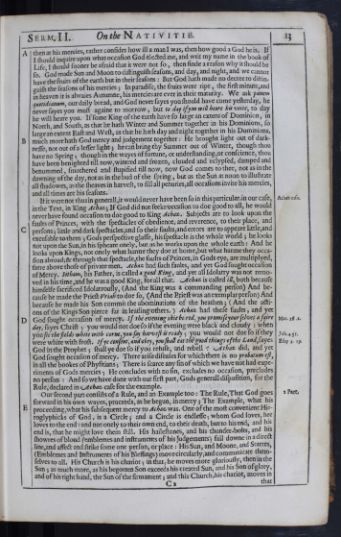 Serm. II.
On the Nativitie.
13
then at his mercies, rather consider how ill a man I was, then how good a God he is. If
Serm. II.
On the Nativitie.
13
then at his mercies, rather consider how ill a man I was, then how good a God he is. If
I should inquire upon what occasion God elected me, and writ my name in the book of
Life, I should sooner be afraid that it were not so, then finde a reason why it should be
so. God made Sun and Moon to distinguish seasons, and day, and night, and we cannot
have the fruits of the earth but in their seasons: But God hath made no decree to distin-
guish the seasons of his mercies; In paradise, the fruits were ripe, the first minute, and
in heaven it is alwaies Autumne, his mercies are ever in their maturity. We ask panem
quotidianum, our daily bread, and God never sayes you should have come yesterday, he
never sayes you must againe to morrow, but to day if you will heare his voice, to day
he will heare you. If some King of the earth have so large an extent of Dominion, in
North, and South, as that he hath Winter and Summer together in his Dominions, so
large an extent East and West, as that he hath day and night together in his Dominions,
much more hath God mercy and judgement together: He brought light out of dark-
nesse, not out of a lesser light; he can bring thy Summer out of Winter, though thou
have no Spring; though in the wayes of fortune, or understanding, or conscience, thou
have been benighted till now, wintred and frozen, clouded and eclypsed, damped and
benummed, smothered and stupified till now, now God comes to thee, not as in the
dawning of the day, not as in the bud of the spring, but as the Sun at noon to illustrate
all shadowes, as the sheaves in harvest, to fill all penuries, all occasions invite his mercies,
and all times are his seasons.
If it were not thus in generall, it would never have been so in this particular, in our case, Achaz case.
in the Text, in King Achaz; If God did not seeke occasion to doe good to all, he would
never have found occasion to doe good to King Achaz. Subjects are to look upon the
faults of Princes, with the spectacles of obedience, and reverence, to their place, and
persons; little and dark spectacles, and so their faults, and errors are to appeare little, and
excusable to them; Gods perspective glasse, his spectacle is the whole world; he looks
not upon the Sun, in his spheare onely, but as he works upon the whole earth: And he
looks upon Kings, not onely what harme they doe at home, but what harme they occa-
sion abroad; & through that spectacle, the faults of Princes, in Gods eye, are multiplyed,
farre above those of private men. Achaz had such faults, and yet God sought occasion
of Mercy. Iotham, his Father, is called a good King, and yet all Idolatry was not remo-
ved in his time, and he was a good King, for all that. Achaz is called ill, both because
himselfe sacrificed Idolatrously, (And the King was a commanding person) And be-
cause he made the Priest Vriah to doe so, (And the Priest was an exemplar person) And
because he made his Son commit the abominations of the heathen; (And the acti-
ons of the Kings Son pierce far in leading others.) Achaz had these faults, and yet
God sought occasion of mercy. If the evening skie be red,Mat. 16.2. you promise your selves a faire
day, sayes Christ; you would not doe so if the evening were black and cloudy: when
you see the fields white with corne, you say harvest is ready;Joh. 4.35.
Esay 1.19. you would not doe so if they
were white with frost. If ye consent, and obey, you shall eat the good things of the Land, sayes
God in the Prophet; shall ye doe so if you refuse, and rebell? Achaz did, and yet
God sought occasion of mercy. There arise diseases for which there is no probatum est,
in all the bookes of Physitians; There is scarce any sin of which we have not had expe-
riments of Gods mercies; He concludes with no sin, excludes no occasion, precludes
no person: And so we have done with our first part, Gods generall disposition, for the
Rule, declared in Achaz case for the example.
Our second part consists of a Rule, and an Example too:2 Part. The Rule, That God goes
forward in his own wayes, proceeds, as he begun, in mercy; The Example, what his
proceeding, what his subsequent mercy to Achaz was. One of the most convenient Hie-
roglyphicks of God, is a Circle; and a Circle is endlesse; whom God loves, hee
loves to the end: and not onely to their own end, to their death, but to his end, and his
end is, that he might love them still. His hailestones, and his thunder-bolts, and his
showres of bloud (emblemes and instruments of his Judgements) fall downe in a direct
line, and affect and strike some one person, or place: His Sun, and Moone, and Starres,
(Emblemes and Instruments of his Blessings) move circularly, and communicate them-
selves to all. His Church is his chariot; in that, he moves more gloriously, then in the
Sun; as much more, as his begotten Son exceeds his created Sun, and his Son of glory,
and of his right hand, the Sun of the firmament; and this Church, his chariot, moves in C2 that
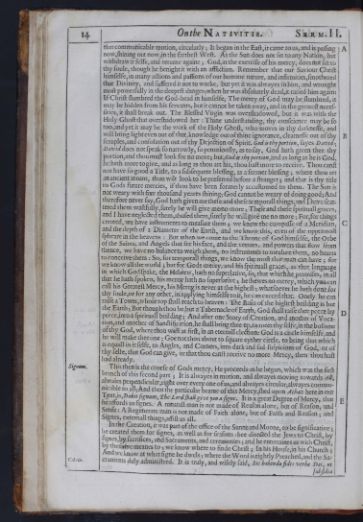 14
On the Nativitie.
Serm. II.
that communicable motion, circularly; It began in the East, it came to us, and is passing
14
On the Nativitie.
Serm. II.
that communicable motion, circularly; It began in the East, it came to us, and is passing
now, shining out now, in the farthest West. As the Sun does not set to any Nation, but
withdraw it selfe, and returne againe; God, in the exercise of his mercy, does not set to
thy soule, though he benight it with an affliction. Remember that our Saviour Christ
himselfe, in many actions and passions of our humane nature, and infirmities, smothered
that Divinity, and suffered it not to worke, but yet it was alwayes in him, and wrought
most powerfully in the deepest danger; when he was absolutely dead, it raised him again:
If Christ slumbred the God-head in himselfe, The mercy of God may be slumbred, it
may be hidden from his servants, but it cannot be taken away, and in the greatest neces-
sities, it shall break out. The Blessed Virgin was overshadowed, but it was with the
Holy Ghost that overshadowed her: Thine understanding, thy conscience may be so
too, and yet it may be the work of the Holy Ghost, who moves in thy darknesse, and
will bring light even out of that, knowledge out of thine ignorance, clearnesse out of thy
scruples, and consolation out of thy Dejection of Spirit. God is thy portion, sayes David;
David does not speak so narrowly, so penuriously, as to say, God hath given thee thy
portion, and thou must look for no more; but, God is thy portion, and as long as he is God,
he hath more to give, and as long as thou art his, thou hast more to receive. Thou canst
not have so good a Title, to a subsequent blessing, as a former blessing; where thou art
an ancient tenant, thou wilt look to be preferred before a stranger; and that is thy title
to Gods future mercies, if thou have been formerly accustomed to them. The Sun is
not weary with sixe thousand yeares shining; God cannot be weary of doing good; And
therefore never say, God hath given me these and these temporall things, and I have scat-
tered them wastfully, surely he will give me no more; These and these spirituall graces,
and I have neglected them, abused them, surely he will give me no more; For, for things
created, we have instruments to measure them; we know the compasse of a Meridian,
and the depth of a Diameter of the Earth, and we know this, even of the uppermost
spheare in the heavens: But when we come to the Throne of God himselfe, the Orbe
of the Saints, and Angels that see his face, and the vertues, and powers that flow from
thence, we have no balance to weigh them, no instruments to measure them, no hearts
to conceive them: So, for temporall things, we know the most that man can have; for
we know all the world; but for Gods mercy, and his spirituall graces, as that language
in which God spake, the Hebrew, hath no superlative, so, that which he promises, in all
that he hath spoken, his mercy hath no superlative; he shewes no mercy, which you can
call his Greatest Mercy, his Mercy is never at the highest; whatsoever he hath done for
thy soule, or for any other, in applying himselfe to it, he can exceed that. Onely he can
raise a Tower, whose top shall reach to heaven: The Basis of the highest building is but
the Earth; But though thou be but a Tabernacle of Earth, God shall raise thee peece by
peece, into a spirituall building; And after one Story of Creation, and another of Voca-
tion, and another of Sanctification, he shall bring thee up, to meet thy selfe, in the bosome
of thy God, where thou wast at first, in an eternall election: God is a circle himselfe, and
he will make thee one; Goe not thou about to square eyther circle, to bring that which
is equall in it selfe, to Angles, and Corners, into dark and sad suspicions of God, or of
thy selfe, that God can give, or that thou canst receive no more Mercy, then thou hast
had already.
This then is the course of Gods mercy, Signum. He proceeds as he begun, which was the first
branch of this second part; It is alwayes in motion, and alwayes moving towards All,
alwaies perpendicular, right over every one of us, and alwayes circular, alwayes commu-
nicable to all; And then the particular beame of this Mercy, shed upon Achaz here in our
Text, is, Dabit signum, The Lord shall give you a signe. It is a great Degree of Mercy, that
he affords us signes. A naturall man is not made of Reason alone, but of Reason, and
Sense: A Regenerate man is not made of Faith alone, but of Faith and Reason; and
Signes, externall things, assist us all.
In the Creation, it was part of the office of the Sunne and Moone, to be significative;
he created them for signes, as well as for seasons: hee directed the Jews to Christ, by
signes, by sacrifices, and Sacraments, and ceremonies; and he entertaines us with Christ,
by the same meanes to; we know where to finde Christ; In his House, in his Church;
And we know at what signe he dwels; where the Word is rightly Preached, and the Sa-
craments duly administred.Calvin. It is truly, and wisely said, Sic habenda fides verbo Dei, ut subsidia
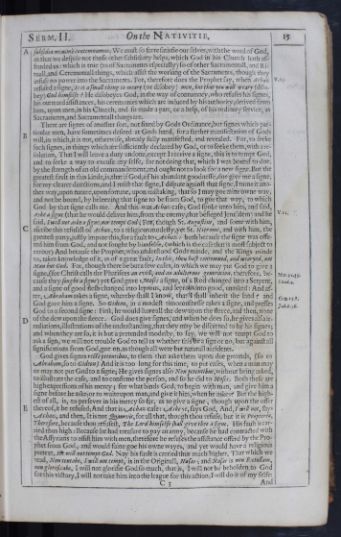 Serm. II.
On the Nativitie.
15
subsidia minimè contemnamus; We must so farre satisfie our selves, with the word of God,
Serm. II.
On the Nativitie.
15
subsidia minimè contemnamus; We must so farre satisfie our selves, with the word of God,
as that we despise not those other subsidiary helps, which God in his Church hath af-
forded us: which is true (as of Sacraments especially) so of other Sacramentall, and Ri-
tuall, and Ceremoniall things, which assist the working of the Sacraments, though they
infuse no power into the Sacraments. For, therefore does the Prophet say, V. 13. when Achaz
refused a signe, Is it a small thing to weary (or disobey) men, but that you will weary (diso-
bey) God himselfe? He disobeyes God, in the way of contumacy, who refuses his signes,
his outward assistances, his ceremonies which are induced by his authority, derived from
him, upon men, in his Church, and so made a part, or a help, of his ordinary service, as
Sacraments, and Sacramentall things are.
There are signes of another sort, not fixed by Gods Ordinance, but signes which par-
ticular men, have sometimes desired at Gods hand, for a farther manifestation of Gods
will, in which, it is not, otherwise, already fully manifested, and revealed. For, to seeke
such signes, in things which are sufficiently declared by God, or to seeke them, with a re-
solution, That I will leave a duty undone, except I receive a signe, this is to tempt God,
and to seeke a way to excuse my selfe, for not doing that, which I was bound to doe,
by the strength of an old commandement, and ought not to look for a new signe. But the
greatest fault in this kinde, is, that if God, of his abundant goodnesse, doe give me a signe,
for my clearer directions, and I resist that signe, I dispute against that signe, I turne it ano-
ther way, upon nature, upon fortune, upon mistaking, that so I may goe mine owne way,
and not be bound, by beleeving that signe to be from God, to goe that way, to which
God by that signe calls me. And this was Achaz case; God spoke unto him, and said,
Aske a signe (that he would deliver him, from the enemy, that besieged Jerusalem) and he V. 11.
said, I will not aske a signe, nor tempt God; For, though St. Augustine, and some with him,
ascribe this refusall of Achaz, to a religious modesty, yet St. Hierome, and with him, the
greatest party, justly impute this, for a fault to Achaz: both because the signe was offe-
red him from God, and not sought by himselfe, (which is the case that is most subject to
errour) And because the Prophet, who understood Gods minde, and the Kings minde
to, takes knowledge of it, as of a great fault, In this, thou hast contemned, and wearyed, not
Man but God. For, though there be but a few cases, in which we may put God to give a
signe, (for Christ calls the Pharisees an evill, and an adulterous generation, therefore, Mat. 12.39.
Exod. 4. be-
cause they sought a signe) yet God gave Moses a signe, of a Rod changed into a Serpent,
and a signe of good flesh changed into leprous, and leprous into good, unasked: And af-
ter, Abraham askes a signe, whereby shall I know, that I shall inherit the land?Gen. 15.8.
Jud. 6.36. and
God gave him a signe. So Gideon, in a modest timorousnesse askes a signe, and presses
God to a second signe: First, he would have all the dew upon the fleece, and then, none
of the dew upon the fleece. God does give signes, and when he does so, he gives also ir-
radiations, illustrations of the understanding, that they may be discerned to be his signes;
and when they are so, it is but a pretended modesty, to say, we will not tempt God to
ask a sign, we will not trouble God to tell us whether this be a sign or no, but against all
significations from God, goe on, as though all were but naturall accidents.
God gives signes rectè petentibus, to them that aske them upon due grounds, (so to
Abraham, so to Gideon) And it is too long for this time, to put cases, when a man may
or may not put God to a signe; He gives signes also Non petentibus, without being asked,
to illustrate the case, and to confirme the person, and so he did to Moses. Both these are
high expressions of his mercy; for what binds God, to begin with man, and give him a
signe before he aske; or to waite upon man, and give it him, when he askes? But the high-
est of all, is, to persever in his mercy so far, as to give a signe, though upon the offer
thereof, it be refused; And that is Achaz case: Aske ye, says God, And, I will not, says
Achaz, and then, It is not Quamvis, for all that, though thou refuse, but it is Propterea,
Therefore, because thou refusest, The Lord himselfe shall give thee a signe. His fault is car-
ried thus high: Because he had treasure to pay an army, because he had contracted with
the Assyrians to assist him with men, therefore he refuses the assistance offerd by the Pro-
phet from God, and would faine goe his owne wayes, and yet would have a religious
pretext, He will not tempt God. Nay his fault is carried thus much higher, That which we
read, Non tentabo, I will not tempt, is in the Originall, Nasas; and Nasas is non Extollam,
non glorificabo, I will not glorifie God so much, that is, I will not be beholden to God
for this victory, I will not take him into the league for this action, I will do it of my selfe: C3 And
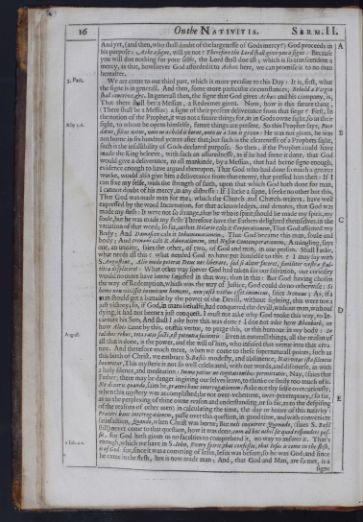 16
On the Nativitie.
Serm. II.
And yet, (and then, who shall doubt of the largenesse of Gods mercy?) God proceeds in
16
On the Nativitie.
Serm. II.
And yet, (and then, who shall doubt of the largenesse of Gods mercy?) God proceeds in
his purpose: Aske a signe, will ye not? Therefore the Lord shall give you a signe: Because
you will doe nothing for your selfe, the Lord shall doe all; which is so transcendent a
mercy, as that, howsoever God afforded it to Achaz here, we can promise it to no man
hereafter.
We are come to our third part, 3. Part. which is more peculiar to this Day: It is, first, what
the signe is in generall, And then, some more particular circumstances, Behold a Virgin
shall conceive, &c. In generall then, the signe that God gives Achaz and his company, is,
That there shall bee a Messias, a Redeemer given. Now, how is this future thing,
(There shall be a Messias) a signe of their present deliverance from that siege? First, In
the notion of the Prophet, it was not a future thing; for, as in Gods owne sight, so in their
sight, Esay 3.6. to whom he opens himselfe, future things are present. So this Prophet says, Puer
datus, filius natus, unto us a child is borne, unto us a Son is given: He was not given, he was
not borne in six hundred yeares after that; but such is the clearenesse of a Prophets sight,
such is the infallibility of Gods declared purpose. So then, if the Prophet could have
made the King beleeve, with such an assurednesse, as if he had seene it done, that God
would give a deliverance, to all mankinde, by a Messias, that had beene signe enough,
evidence enough to have argued thereupon, That God who had done so much a greater
worke, would also give him a deliverance from that enemy, that pressed him then: If I
can fixe my selfe, with the strength of faith, upon that which God hath done for man,
I cannot doubt of his mercy, in any distresse: If I lacke a signe, I seeke no other but this,
That God was made man for me; which the Church and Church-writers, have well
expressed by the word Incarnation, for that acknowledges, and denotes, that God was
made my flesh: It were not so strange, that he who is spirit, should be made my spirit, my
soule, but he was made my flesh: Therefore have the Fathers delighted themselves, in the
variation of that word; so far, as that Hilarie cals it Corporationem, That God assumed my
Body; And Damascen cals it Inhumanationem, That God became this man, soule and
body; And Irenæus cals it Adunationem, and Nysen Contemperationem, A mingling, says
one, an uniting, saies the other, of two, of God and man, in one person. Shall I aske,
what needs all this? what needed God to have put himselfe to this? I may say with
S. Augustine, Alio modo poterat Deus nos liberare, sed si aliter faceret, similiter vestræ stul-
titiæ displiceret: What other way soever God had taken for our salvation, our curiosity
would no more have beene satisfied in that way, than in this: But God having chosen
the way of Redemption, which was the way of Justice, God could do no otherwise: Si
homo non vicisset inimicum hominis, non justè victus esset inimicus, saies Irenæus; As, if a
man should get a battaile by the power of the Devill, without fighting, this were not a
just victory; so, if God, in mans behalfe, had conquered the devill, without man, without
dying, it had not beene a just conquest. I must not aske why God tooke this way, to In-
carnate his Son; And shall I aske how this was done? I doe not aske how Rheubarb, or
how Aloes came by this, or this vertue, to purge this, or this humour in my body: In
talibus rebus, tota ratio facti, est potentia facientis: Even in naturall things, all the reason of August.
all that is done, is the power, and the will of him, who infused that vertue into that crea-
ture. And therefore much more, when we come to these supernaturall points, such as
this birth of Christ, we embrace S. Basils modesty, and abstinence, Nativitas ista silentio
honoretur, This mysterie is not so well celebrated, with our words, and discourse, as with
a holy silence, and meditation: Immo potius ne cogitationibus permittatur, Nay, (saies that
Father) there may be danger in giving our selves leave, to thinke or study too much of it.
Ne dixeris quando, saies he, præteri hanc interrogationem: Aske not thy selfe overcuriously,
when this mystery was accomplished; be not over-vehement, over-peremptory, (so far,
as to the perplexing of thine owne reason and understanding, or so far, as to the despising
of the reasons of other men) in calculating the time, the day or houre of this nativity:
Præteri hanc interrogationem, passe over this question, in good time, and with convenient
satisfaction, Quando, when Christ was borne; But noli inquirere Quomodo, (saies S. Basil
still) never come to that question, how it was done, cum ad hoc nihil sit quod responderi pos-
sit, for God hath given us no faculties to comprehend it, no way to answer it. That's
enough, which we have in S. Iohn, Every spirit, that confesses, that Iesus is come in the flesh, 1 Ioh. 4.2.
is of God: for, since it was a comming of Iesus, Iesus was before; so he was God; and since
he came in the flesh, hee is now made man; And, that God and Man, are so met, is a signe
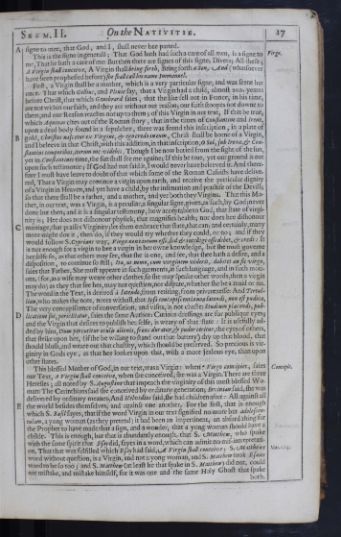 Serm. II.
On the Nativitie.
17
signe to mee, that God, and I, shall never bee parted.
Serm. II.
On the Nativitie.
17
signe to mee, that God, and I, shall never bee parted.
This is the signe in generall; That God hath had such a care of all men, Virgo. is a signe to
me, That he hath a care of me: But then there are signes of this signe; Divers; All these;
A Virgin shall conceive, A Virgin shall bring forth, Bring forth a Son, And (whatsoever
have been prophesied before) she shall call his name Immanuel.
First, a Virgin shall be a mother, which is a very particular signe, and was seene but
once. That which Gellius, and Plinie say, that a Virgin had a child, almost 200. yeares
before Christ, that which Genebrard saies, that the like fell out in France, in his time,
are not within our faith, and they are without our reason; our faith stoopes not downe to
them, and our Reason reaches not up to them; of this Virgin in our text, If that be true,
which Aquinas cites out of the Roman story, that in the times of Constantine and Irene,
upon a dead body found in a sepulchre, there was found this inscription, in a plate of
gold, Christus nascetur ex Virgine, & ego credo in eum, Christ shall be borne of a Virgin,
and I beleeve in that Christ, with this addition, in that inscription, O Sol, sub Irenæ, & Con-
stantini temporibus, iterum me videbis, Though I be now buried from the sight of the sun,
yet in Constantines time, the sun shall see me againe; If this be true, yet our ground is not
upon such testimonie; If God had not said it, I would never have beleeved it. And there-
fore I must have leave to doubt of that which some of the Roman Casuists have delive-
red, That a Virgin may continue a virgin upon earth, and receive the particular dignity
of a Virgin in Heaven, and yet have a child, by the insinuation and practise of the Devill;
so that there shall be a father, and a mother, and yet both they Virgins. That this Mo-
ther, in our text, was a Virgin, is a peculiar, a singular signe, given, as such, by God; never
done but then; and it is a singular testimony, how acceptable to God, that state of virgi-
nity is; Hee does not dishonour physick, that magnifies health; nor does hee dishonour
marriage, that praises Virginity; let them embrace that state, that can; and certainly, many
more might doe it, then do, if they would try whether they could, or no; and if they
would follow S. Cyprians way, Virgo non tantum esse, sed & intelligi esse debet, & credi: It
is not enough for a virgin to bee a virgin in her owne knowledge, but she must governe
her selfe so, as that others may see, that she is one, and see, that shee hath a desire, and a
disposition, to continue so still; Ita, ut nemo, cum virginem viderit, dubitet an sit virgo,
saies that Father, She must appeare in such garments, in such language, and in such moti-
ons, (for, as a wife may weare other clothes, so she may speake other words, then a virgin
may do) as they that see her, may not question, nor dispute, whether she be a maid or no.
The word in the Text, is derived à latendo, from retiring, from privatenesse: And Tertul-
lian, who makes the note, notes withall, that Ipsa concupiscentia non latendi, non est pudica,
The very concupiscence of conversation, and visits, is not chaste: Studium placendi, pub-
licatione sui, periclitatur, saies the same Author: Curious dressings are for publique eyes;
and the Virgin that desires to publish her selfe, is weary of that state: It is usefully ad-
ded by him, Dum percutitur oculis alienis, frons duratur, & pudor teritur, the eyes of others,
that strike upon her, (if she be willing to stand out that battery) dry up that blood, that
should blush, and weare out that chastity, which should be preserved. So precious is vir-
ginity in Gods eye, as that hee lookes upon that, with a more jealous eye, than upon
other states.
This blessed Mother of God, in our text, was a Virgin: when? Virgo concipiet, Concepit. saies
our Text, A Virgin shall conceive, when she conceived, she was a Virgin. There are three
Heresies; all noted by S. Augustine that impeach the virginity of this most blessed Wo-
man: The Cerinthians said she conceived by ordinary generation; Iovinian said, she was
delivered by ordinary meanes; And Helvidius said, she had children after: All against all
the world besides themselves, and against one another. For the first, that is enough
which S. Basil sayes, that if the word Virgin in our text signified no more but adolescen-
tulam, a yong woman (as they pretend) it had been an impertinent, an absurd thing for
the Prophet to have made that a sign, and a wonder, that a yong woman should have a
childe. This is enough, but that is abundantly enough, that S. Matthew, who spoke
with the same spirit that Esay did, sayes in a word, which can admit no mis-interpretati-
on, That that was fulfilled which Esay had said, A Virgin shall conceive;Mat. 1.23. S. Matthews
word without question, is a Virgin, and not a yong woman, and S. Matthew took Esaies
word to be so too; and S. Matthew (at least he that spake in S. Matthew) did not, could
not mistake, and mistake himself, for it was one and the same Holy Ghost that spake both.
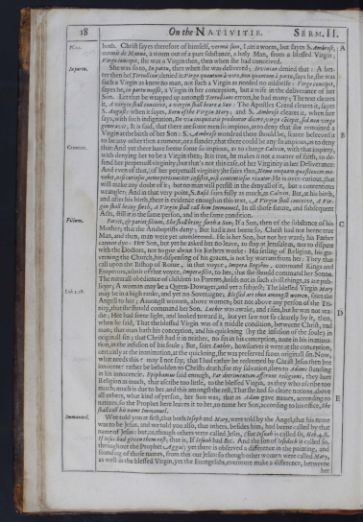 18
On the Nativitie.
Serm. II.
both.Ps. 21. Christ sayes therefore of himself, vermis sum, I am a worm, but sayes S. Ambrose,
18
On the Nativitie.
Serm. II.
both.Ps. 21. Christ sayes therefore of himself, vermis sum, I am a worm, but sayes S. Ambrose,
vermis de Manna, a worm out of a pure substance, a holy Man, from a blessed Virgin;
Virgo concepit, she was a Virgin then, then when she had conceived.
She was so to, In partu. In partu, then when she was delivered; Iovinian denied that: A bet-
ter then he (Tertullian) denied it: Virgo quantum à viro, non quantum à partu, says he, she was
such a Virgin as knew no man, not such a Virgin as needed no midwife: Virgo concepit,
sayes he, in partu nupsit, a Virgin in her conception, but a wife in the deliverance of her
Son. Let that be wrapped up amongst Tertullians errors, he had many; The text cleares
it, A virgin shall conceive, a virgin shall beare a Son: The Apostles Creed cleares it, sayes
S. August: when it sayes, Born of the Virgin Mary; and S. Ambrose cleares it, when hee
says, with such indignation, De via iniquitatis produntur dicere, virgo cōcepit, sed non virgo
generavit, It is said, that there are some men so impious, as to deny that she remained a
Virgin at the birth of her Son: S. Ambrose wondred there should be, scarce beleeved it
to be any other then a rumour, or a slander, that there could be any so impious, as to deny
that:Cramerus. And yet there have beene some so impious, as to charge Calvin, with that impiety,
with denying her to be a Virgin then; It is true, he makes it not a matter of faith, to de-
fend her perpetuall virginity; but that's not this case, of her Virginity in her Deliverance:
And even of that, (of her perpetuall virginity) he saies thus, Nemo unquam quæstionem mo-
vebit, nisi curiosus, nemo pertinaciter insistet, nisi contentiosus rixator; He is over-curious, that
will make any doubt of it; but no man will persist in the denyall of it, but a contentious
wrangler; And in that very point, S. Basil saies fully as much, as Calvin. But, at his birth,
and after his birth, there is evidence enough in this text, A Virgin shall conceive, A Vir-
gin shall bring forth, A Virgin shall call him Immanuel, In all those future, and subsequent
Acts, still it is the same person, and in the same condition.
Pariet, Filium. & pariet filium, She shall bring forth a Son; If a Son, then of the substance of his
Mother; that the Anabaptists deny; But had it not beene so, Christ had not beene true
Man, and then, man were yet unredeemed. He is her Son, but not her ward; his Father
cannot dye: Her Son, but yet he asked her no leave, to stay at Jerusalem, nor to dispute
with the Doctors, nor to goe about his Fathers worke: His setling of Religion, his go-
verning the Church, his dispensing of his graces, is not by warrant from her: They that
call upon the Bishop of Rome, in that voyce, Impera Regibus, command Kings and
Emperors, admit of that voyce, Impera filio, to her, that she should command her Sonne.
The naturall obedience of children to Parents, holds not in such civill things, as are pub-
lique; A woman may be a Queen-Dowager, and yet a subject; The blessed Virgin Mary
may be in a high ranke, Luk. 1.28. and yet no Soveraigne; Blessed art thou amongst women, saies the
Angell to her; Amongst women, above women; but not above any person of the Tri-
nity, that she should command her Son. Luther was awake, and risen, but he was not rea-
die; Hee had seene light, and looked toward it, but yet saw not so clearely by it, then,
when he said, That the blessed Virgin was of a middle condition, betweene Christ, and
man; that man hath his conception, and his quickning (by the infusion of the soule) in
originall sin; that Christ had it in neither, no sin in his conception, none in his inanima-
tion, in the infusion of his soule; But, saies Luther, howsoever it were at the conception,
certainly at the inanimation, at the quickning, she was preserved from originall sin. Now,
what needs this? may I not say, that I had rather be redeemed by Christ Jesus then bee
innocent? rather be beholden to Christs death, for my salvation, then to Adams standing
in his innocencie. Epiphanius said enough, Par detrimentum afferunt religioni, they hurt
Religion as much, that ascribe too little, to the blessed Virgin, as they who ascribe too
much; much is due to her, and this amongst the rest, That she had so cleare notions, above
all others, what kind of person, her Son was, that as Adam gave names, according to
natures, so the Prophet here leaves it to her, to name her Son, according to his office, She
shall call his name Immanuel.
Wee told you at first, Immanuel. that both Ioseph and Mary, were told by the Angel, that his name
was to be Jesus, and we told you also, that others, besides him, had beene called by that
name of Jesus: but, as, though others were called Jesus, (for Iosuah is called so, Heb. 4.8.
If Iesus had given them rest; that is, If Iosuah had &c. And the son of Iosedech is called so,
throughout the Prophet Aggai) yet there is observed a difference in the pointing, and
founding of those names, from this our Jesus: so though other women were called Mary,
as well as the blessed Virgin, yet the Euangelists, evermore make a difference, betweene her
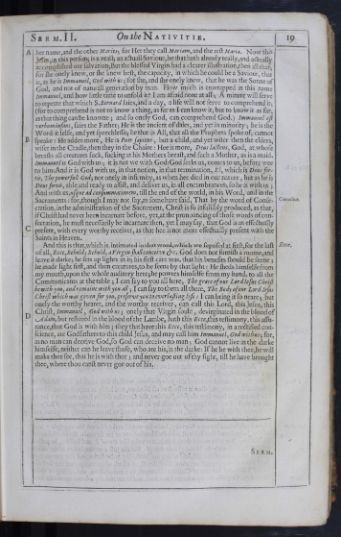 Serm. II.
On the Nativitie.
19
her name, and the other Maries; for Her they call Mariam, and the rest Maria. Now this
Serm. II.
On the Nativitie.
19
her name, and the other Maries; for Her they call Mariam, and the rest Maria. Now this
Jesus, in this person, is a reall, an actuall Saviour, he that hath already really, and actually
accomplished our salvation; But the blessed Virgin had a clearer illustration, then all that;
for she onely knew, or she knew best, the capacity, in which he could be a Saviour, that
is, as he is Immanuel, God with us; for she, and she onely knew, that he was the Sonne of
God, and not of naturall generation by man. How much is enwrapped in this name
Immanuel, and how little time to unfold it? I am afraid none at all; A minute will serve
to repeate that which S. Bernard saies, and a day, a life will not serve to comprehend it;
(for to comprehend is not to know a thing, as far as I can know it, but to know it as far,
as that thing can be knowne; and so onely God, can comprehend God.) Immanuel est
verbum infans, saies the Father; He is the ancient of daies, and yet in minority; he is the
Word it selfe, and yet speechlesse; he that is All, that all the Prophets spoke of, cannot
speake: He addes more, He is Puer sapiens, but a child, and yet wiser then the elders,
wiser in the Cradle, then they in the Chaire: Hee is more, Deus lactens, God, at whose
breasts all creatures suck, sucking at his Mothers breast, and such a Mother, as is a maid.
Immanuel is God with us; it is not we with God: God seeks us, comes to us, before wee
to him: And it is God with us, in that notion, in that termination, El, which is Deus for-
tis, The powerfull God; not onely in infirmity, as when hee died in our nature, but as he is
Deus fortis, able and ready to assist, and deliver us, in all encumbrances; so he is with us;
And with us, usque ad consummationem, till the end of the world, in his Word, and in the
Sacraments: for, though I may not say, as some have said, That by the word of Cornelius. Conse-
cration, in the administration of the Sacrament, Christ is so infallibly produced, as that,
if Christ had never been incarnate before, yet, at the pronouncing of those words of con-
secration, he must necessarily be incarnate then, yet I may say, that God is as effectually
present, with every worthy receiver, as that hee is not more effectually present with the
Saints in Heaven.
And this is that, which is intimated in that word, which we seposed at first, Ecce. for the last
of all, Ecce, Behold; Behold, a Virgin shall conceive &c. God does not furnish a roome, and
leave it darke; he sets up lights in it; his first care was, that his benefits should be seene;
he made light first, and then creatures, to be seene by that light: He sheds himselfe from
my mouth, upon the whole auditory here; he powres himselfe from my hand, to all the
Communicants at the table; I can say to you all here, The grace of our Lord Iesus Christ
be with you, and remaine with you all; I can say to them all there, The Body of our Lord Iesus
Christ which was given for you, preserve you to everlasting life: I can bring it so neare; but
onely the worthy hearer, and the worthy receiver, can call this Lord, this Jesus, this
Christ, Immanuel, God with us; onely that Virgin soule, devirginated in the blood of
Adam, but restored in the blood of the Lambe, hath this Ecce, this testimony, this assu-
rance, that God is with him; they that have this Ecce, this testimony, in a rectified con-
science, are Godfathers to this child Jesus, and may call him Immanuel, God with us; for,
as no man can deceive God, so God can deceive no man; God cannot live in the darke
himselfe, neither can he leave those, who are his, in the darke: If he be with thee, he will
make thee see, that he is with thee; and never goe out of thy sight, till he have brought
thee, where thou canst never goe out of his. Serm.
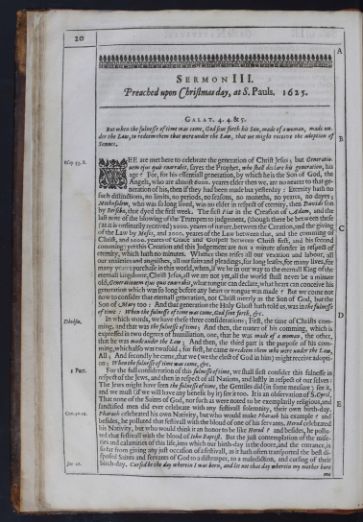 20
20
Sermon III.
Preached upon Christmas day, at S. Pauls. 1625.
Galat. 4.4. & 5.
But when the fulnesse of time was come, God sent forth his Son, made of a woman, made un-
der the Law, to redeem them that were under the Law, that we might receive the adoption of
Sonnes.
WEEWee are met here to celebrate the generation of Christ Jesus;Esay 53.8. but Generatio-
nem ejus quis enarrabit, sayes the Prophet, who shall declare his generation, his
age? For, for his essentiall generation, be which he is the Son of God, the
Angels, who are almost 6000. yeares elder then we, are no nearer to that ge-
neration of his, then if they had been made but yesterday: Eternity hath no
such distinctions, no limits, no periods, no seasons, no moneths, no yeares, no dayes;
Methusalem, who was so long lived, was no elder in respect of eternity, then Davids son
by Berseba, that dyed the first week. The first Fiat in the Creation of Adam, and the
last note of the blowing of the Trumpets to judgement, (though there be between these
(as it is ordinarily received) 2000. yeares of nature, between the Creation, and the giving
of the Law by Moses, and 2000. yeares of the Law between that, and the comming of
Christ, and 2000. yeares of Grace and Gospell between Christ first, and his second
comming) yet this Creation and this Judgement are not a minute asunder in respect of
eternity, which hath no minutes. Whence then arises all our vexation and labour, all
our anxieties and anguishes, all our suits and pleadings, for long leases, for many lives, for
many yeares purchase in this world, when, if we be in our way to the eternall King of the
eternall kingdome, Christ Jesus, all we are not yet, all the world shall never be a minute
old; Generationem ejus quis enarrabit, what tongue can declare, what heart can conceive his
generation which was so long before any heart or tongue was made? But we come not
now to consider that eternall generation, not Christ meerly as the Son of God, but the
Son of Mary too: And that generation the Holy Ghost hath told us, was in the fulnesse
of time: When the fulnesse of time was come, God sent forth, &c.
In which words,Divisio. we have these three considerations; First, the time of Christs com-
ming, and that was the fulnesse of time; And then, the maner of his comming, which is
expressed in two degrees of humiliation, one, that he was made of a woman, the other,
that he was made under the Law; And then, the third part is the purpose of his com-
ming, which also was twofold; for first, he came to redeem them who were under the Law,
All; And secondly he came, that we (we the elect of God in him) might receive adopti-
on; When the fulnesse of time was come, &c.
1 Part For the full consideration of this fulnesse of time, we shall first consider this fulnesse in
respect of the Jews, and then in respect of all Nations, and lastly in respect of our selves:
The Jews might have seen the fulnesse of time, the Gentiles did (in some measure) see it,
and we must (if we will have any benefit by it) see it too. It is an observation of S. Cyril,
That none of the Saints of God, nor such as were noted to be exemplarily religious, and
sanctified men did ever celebrate with any festivall solemnity, their own birth-day.
Pharaoh celebrated his own Nativity, Gen. 40.22. but who would make Pharaoh his example? and
besides, he polluted that festivall with the bloud of one of his servants. Herod celebrated
his Nativity, but who would think it an honor to be like Herod? and besides, he pollu-
ted that festivall with the blood of Iohn Baptist. But the just contemplation of the mise-
ries and calamities of this life, into which our birth-day is the doore, and the entrance, is
so far from giving any just occasion of a festivall, as it hath often transported the best di-
sposed Saints and servants of God to a distemper, to a malediction, and cursing of their
Jer. 20 birth-day. Cursed be the day wherein I was born, and let not that day wherein my mother bare me
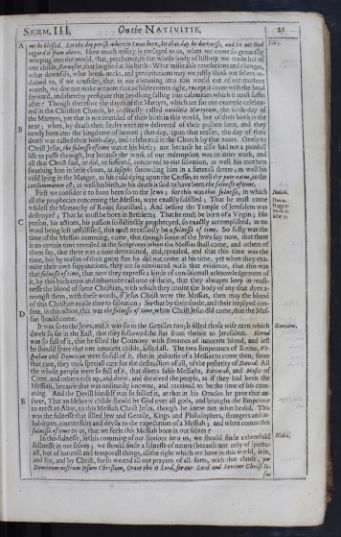 Serm. III.
On the Nativitie.
21
me be blessed. Let the day perish wherein I was born, let that day be darknesse,Job 3. and let not God
Serm. III.
On the Nativitie.
21
me be blessed. Let the day perish wherein I was born, let that day be darknesse,Job 3. and let not God
regard it from above. How much misery is presaged to us, when we come so generally
weeping into the world, that, perchance, in the whole body of history we reade but of
one childe, Zoroaster, that laughed at his birth: What miserable revolutions and changes,
what downfals, what break-necks, and precipitations may we justly think our selves or-
dained to, if we consider, that in our comming into this world out of our mothers
womb, we doe not make account that a childe comes right, except it come with the head
forward, and thereby prefigure that headlong falling into calamities which it must suffer
after? Though therefore the dayes of the Martyrs, which are for our example celebra-
ted in the Christian Church, be ordinarily called natalitia Martyrum, the birth-day of
the Martyrs, yet that is not intended of their birth in this world, but of their birth in the
next; when, by death their soules were new delivered of their prisons here, and they
newly born into the kingdome of heaven; that day, upon that reason, the day of their
death was called their birth-day, and celebrated in the Church by that name. Onely to
Christ Jesus, the fulnesse of time was at his birth; not because he also had not a painfull
life to passe through, but because the work of our redemption was an intire work, and
all that Christ said, or did, or suffered, concurred to our salvation, as well his mothers
swathing him in little clouts, as Iosephs shrowding him in a funerall sheete; as well his
cold lying in the Manger, as his cold dying upon the Crosse; as well the puer natus, as the
consummatum est; as well his birth, as his death is said to have been the fulnesse of time.
Index. First we consider it to have been so to the Jews; for this was that fulnesse, in which
Dan. 2. all the prophecies concerning the Messias, were exactly fulfilled; That he must come
Hagg. 2. whilest the Monarchy of Rome flourished; And before the Temple of Jerusalem was
Mich. 5. destroyed; That he must be born in Bethlem; That he must be born of a Virgin; His
Esay 7. person, his actions, his passion so distinctly prophecyed, so exactly accomplished, as no
word being left unfulfilled, this must necessarily be a fulnesse of time. So fully was the
time of the Messias comming, come, that though some of the Jews say now, that there
is no certain time revealed in the Scriptures when the Messias shall come, and others of
them say, that there was a time determined, and revealed, and that this time was the
time, but by reason of their great sins he did not come at his time, yet when they exa-
mine their own supputations, they are so convinced with that evidence, that this was
that fulnesse of time, that now they expresse a kinde of conditionall acknowledgement of
it, by this barbarous and inhumane custome of theirs, that they alwayes keep in readi-
nesse the blood of some Christian, with which they anoint the body of any that dyes a-
mongst them, with these words, if Jesus Christ were the Messias, then may the blood
of this Christian availe thee to salvation: So that by their doubt, and their implyed con-
sent, in this action, this was the fulnesse of time, when Christ Jesus did come, that the Mes-
sias should come.
Gontibus. It was so to the Jews, and it was so to the Gentiles too; It filled those wise men which
dwelt so far in the East, that they followed the star from thence to Jerusalem. Herod
was so full of it, that he filled the Countrey with streames of innocent bloud, and lest
he should spare that one innocent childe, killed all. The two Emperours of Rome, Ve-
spasian and Domitian were so full of it, that in jealousie of a Messias to come then, from
that race, they took speciall care for the destruction of all, of the posterity of David. All
the whole people were so full of it, that divers false-Messiahs, Barcocab, and Moses of
Crete, and others rose up, and drew, and deceived the people, as if they had been the
Messiah, because that was ordinarily knowne, and received to be the time of his com-
ming. And the Devill himself was so full of it, as that in his Oracles he gave that an-
swer, That an Hebrew childe should be God over all gods, and brought the Emperour
to erect an Altar, to this Messiah Christ Jesus, though he knew not what he did. This
was the fulnesse that filled Jew and Gentile, Kings and Philosophers, strangers and in-
habitants, counterfaits and devils to the expectation of a Messiah; and when comes this
fulnesse of time to us, that we feele this Messiah born in our selves?
Nobis. In this fulnesse, in this comming of our Saviour into us, we should finde a threefold
fullnesse in our selves; we should finde a fulnesse of nature (because not only of spiritu-
all, but of naturall and temporall things, all the right which we have in this world, is in,
and for, and by Christ, for so we end all our prayers of all sorts, with that clause, per
Dominum nostrum Iesum Christum, Grant this O Lord, for our Lord and Saviour Christ Ie sus
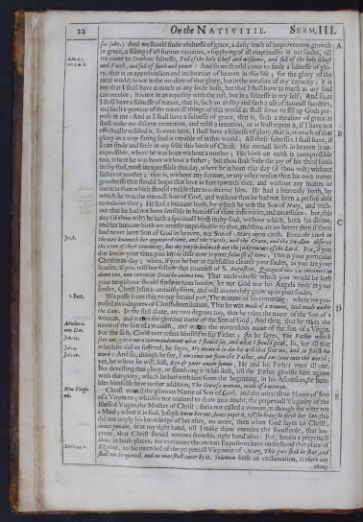 22
On the Nativitie.
Serm. III.
sus sake.) And we should finde a fulnesse of grace, a daily sense of improvement growth
22
On the Nativitie.
Serm. III.
sus sake.) And we should finde a fulnesse of grace, a daily sense of improvement growth
in grace, a filling of all former vacuities, a supplying of all emptinesses in our soules, till
Acts 6.3.
ver. 5. & 8. we came to Stephens fulnesse, Full of the holy Ghost and wisdome, and full of the holy Ghost
and Faith, and full of faith and power: And so we should come to finde a fulnesse of glo-
ry, that is an apprehension and inchoation of heaven in this life; for the glory of the
next world, is not in the measure of that glory, but in the measure of my capacity; it is
not that I shall have as much as any soule hath, but that I shall have as much as my soul
can receive; it is not in an equality with the rest, but in a fulnesse in my self; And so, as
I shall have a fulnesse of nature, that is, such an ability and such a use of naturall faculties,
and such a portion of the naturall things of this world as shall serve to fill up Gods pur-
pose in me: And as I shall have a fulnesse of grace, that is, such a measure of grace as
shall make me discern a tentation, and resist a tentation, or at least repent it, if I have not
effectually resisted it, so even here, I shall have a fulnesse of glory, that is, as much of that
glory as a way-faring soul is capable of in this world; All these fulnesses I shall have, if
I can finde and feele in my selfe this birth of Christ. His eternall birth in heaven is un-
expressible, where he was born without a mother; His birth on earth is unexpressible
too, where he was born without a father; but thou shalt feele the joy of his third birth
in thy soul, most inexpressible this day, where he is born this day (if thou wilt) without
father or mother; that is, without any former, or any other reason then his own meere
goodnesse that should beget that love in him towards thee, and without any matter or
merit in thee which should enable thee to conceive him. He had a heavenly birth, by
which he was the eternall Son of God, and without that he had not been a person able
to redeem thee; He had a humane birth, by which he was the Son of Mary, and with-
out that he had not been sensible in himself of thine infirmities, and necessities; but, this
day (if thou wilt) he hath a spirituall birth in thy soul, without which, both his divine,
and his humane birth are utterly unprofitable to thee, and thou art no better then if there
had never been Son of God in heaven, nor Son of Mary upon earth. Even the Stork in
Jer. 8. the aire knoweth her appointed time, and the Turtle, and the Crane, and the Swallow observe
the time of their comming, but my people knoweth not the judgements of the Lord. For, if you
doe know your time, you know that now is your fulnesse of time; This is your particular
Christmas-day; when, if you be but as carefull to cleanse your soules, as you are your
houses, if you will but follow that counsell of S. Augustine, Quicquid non vis inveniri in
domo tua, non inveniat Deus in anima tua, That uncleannesse which you would be loth
your neighbour should finde in your houses, let not God nor his Angels finde in your
soules, Christ Jesus is certainly born. and will as certainly grow up in your soules.
2 Part. We passe from this, to our second part, The manner of his comming; where we pro-
posed two degrees of Christs humiliation, That he was made of a woman, and made under
the Law. In the first alone, are two degrees too, that he takes the name of the Son of a
woman, and waneswaives the glorious name of the Son of God; And then, that he takes the
Mulieris
non Dei. name of the son of a woman, and waneswaives the miraculous name of the son of a Virgin.
For the first; Christ ever refers himself to his Father; As he sayes, The Father which
Joh. 12. sent me, gave me a commandement what I should say, and what I should speak, so, for all that
Joh. 4. which he did or suffered, he sayes, My meate is to doe his will that sent me, and to finish his
Joh. 16. work: And so, though he say, I am come out from the Father, and am come into the world;
yet, be where he will, still, Ego & pater unum sumus, He and his Father were all one.
But devesting that glory, or slumbring it in his flesh, till the Father glorifie him againe
with that glory, which he had with him from the beginning, in his Ascension, he hum-
bles himselfe here to that addition, The Son of a woman, made of a woman.
Non Virgi-
nis. Christ wanedwaived the glorious Name of Son of God, and the miraculous Name of Son
of a Virgin to; which is not omitted to draw into doubt, the perpetuall Virginity of the
Blessed Virgin, the Mother of Christ; she is not called a woman, as though she were not
a Maid; when it is said, Joseph knew her not, donec peperit, till she brought forth her Son, this
did not imply his knowledge of her after, no more, then when God sayes to Christ,
donec ponam, sit at my right hand, till I make thine enemies thy footstoole, that im-
ports, that Christ should remove from his right hand after: For, here is a perpetuall
donec in both places; for evermore the ancient Expositors have understood that place of
Ezek. 44.2. Ezekiel, to be intended of the perpetuall Virginitie of Mary, This gate shall be shut,
and shall not be opened, and no man shall enter by it. Solomon hath an exclamation, Is there any thing
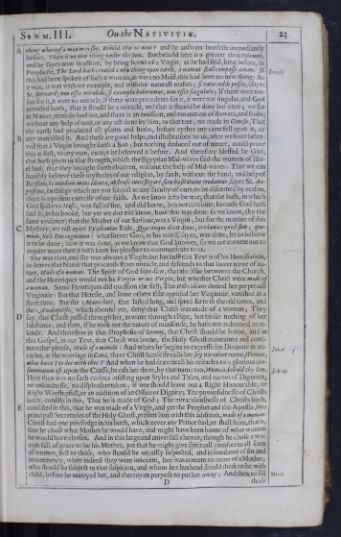 Serm. III.
On the Nativitie.
23
thing whereof a man may say, Behold this is new? and he answers himselfe immediately
Serm. III.
On the Nativitie.
23
thing whereof a man may say, Behold this is new? and he answers himselfe immediately
before, There is no new thing under the Sun. But behold here is a greater then Solomon,
and he sayes now in action, by being borne of a Virgin, as he had said, long before, in
Jer. 31. Prophesie, The Lord hath created a new thing upon earth, a woman shall compasse a man. If
this had been spoken of such a woman, as were no Maid, this had been no new thing: As
it was, it was without example, and without naturall reason; si ratio reddi posset, (sayes
St. Bernard) non esset mirabile, si exempla haberemus, non esset singulare; If there were rea-
son for it, it were no miracle, if there were precedents for it, it were not singular; and God
intended both, that it should be a miracle, and that it should be done but once; we see
in Nature, trees do bud out, and there is an emission, and emanation of flowers, and fruits,
without any help of man, or any act done by him, to that tree; we reade in Genesis, That
the earth had produced all plants and herbs, before eyther any raine fell upon it, or
any man tilled it. And these are good helps, and illustrations to us, after we have belee-
ved that a Virgin brought forth a Son; but nothing deduced out of nature, could prove
this at first, to any man, except he beleeved it before. And therefore blessed be God,
that hath given us that strength, which the Egyptian Mid-wives said the women of Isra-
el had, that they brought forth children, without the help of Mid-wives: That we can
humbly beleeve these mysteries of our religion, by faith, without the hand, and help of
Reason; Si nondum mens idonea, abstrusa investigare, sine hæsitatione credantur, sayes St. Au-
gustine, In things which are not subject to any faculty of ours, to be discerned by reason,
there is a present exercise of our faith. As we know it to be true, that the bush, in which
God spake to Moses, was full of fire, and did burne, but not consume, because God hath
said so, in his booke, but yet we doe not know, how that was done: so we know, (by the
same evidence) that the Mother of our Saviour, was a Virgin; but for the manner of this
Mystery, we rest upon Epiphanius Rule, Quæcunque dicit Deus, credamus quòd sint; quo-
modo, Soli Deo cognitum: whatsoever God, in his word, sayes, was done, let us beleeve
it to be done; how it was done, as we know that God knowes, so we are content not to
inquire more then it hath been his pleasure to communicate to us.
She was then, and she was alwaies a Virgin; but because this Text is of his Humiliation,
he leaves that Name that proceeds from miracle, and descends to that lower name of na-
ture, Made of a woman. The Spirit of God fore-saw, that the issue betweene the Church,
and the Heretiques would not be Virgin or no Virgin, but whether Christ were made of
a woman. Some Heretiques did question the first; The Helvidians denied her perpetuall
Virginitie: But that Heresie, and some others that opposed her Virginitie, vanished in a
short time. But the Manichees, that lasted long, and spred farre in the old times, and
the Anabaptists, which abound yet, deny that Christ was made of a woman; They
say, that Christ passed through her, as water through a Pipe, but tooke nothing of her
substance; and then, if he took not the nature of mankinde, he hath not redeemed man-
kinde. And therefore in that Prophesie of Ieremy, that Christ should be borne, and in
this Gospel, in our Text, that Christ was borne, the Holy Ghost mainttaines and conti-
nuesJoh. 2. that phrase, Made of a woman: And where he begins to expresse his Divinitie in mi-
racles, at the marriage in Cana, there Christ himselfe calls her, by no other name, Woman,
what have I to doe with thee? And when he had drawne all his miracles to a glorious con-
summatum est, upon the Crosse, he cals her there, by that name too, Woman, behold thy Son.
Joh. 19. Here then was no such curious insisting upon Styles and Titles, and names of Dignities,
no unkindnesse, no displeasure taken; if one should leave out a Right Honourable, or
Right Worshipfull, or an addition of an Office or Dignity; The powerfulnesse of Christs
birth, consists in this, That he is made of God; The miraculousnesse of Christs birth,
consisted in this, that he was made of a Virgin, and yet the Prophet and the Apostle, two
principall Secretaries of the Holy Ghost, present him with this addition, made of a woman.
Christ had one priviledge in his birth, which never any Prince had, or shall have, that is,
that he chose what Mother he would have, and might have been borne of what woman
he would have chosen. And in this large and universall chovcechoice, though he chose a wo-
man full of grace to be his Mother, yet that he might give spirituall comfort to all sorts
of women, first to those, who should be unjustly suspected, and insimulated of sin and
incontinency, when indeed they were innocent, hee was content to come of a Mother,
who should be subject to that suspicion, and whom her husband should think to be with
Mat. 1. child, before he marryed her, and thereupon purpose to put her away; And then, to fill D those
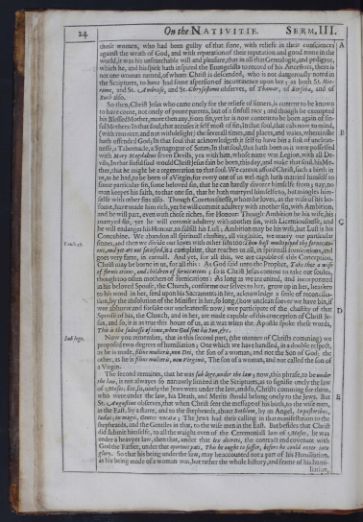 24
On the Nativitie.
Serm. III.
those women, who had been guilty of that sinne, with reliefe in their consciences
24
On the Nativitie.
Serm. III.
those women, who had been guilty of that sinne, with reliefe in their consciences
against the wrath of God, and with reparation of their reputation and good name in the
world, it was his unsearchable will and pleasure, that in all that Genealogie, and pedigree,
which he, and his spirit hath inspired the Euangelists to record of his Ancestors, there is
not one woman named, of whom Christ is descended, who is not dangerously noted in
the Scriptures, to have had some aspersion of incontinence upon her; as both St. Hie-
rome, and St. Ambrose, and St. Chrysostome observes, of Thamar, of Berseba, and of
Ruth also.
So then, Christ Jesus who came onely for the reliefe of sinners, is content to be known
to have come, not onely of poore parents, but of a sinfull race; and though he exempted
his Blessed Mother, more then any, from sin, yet he is now content to be born again of sin-
ful Mothers: In that soul, that accuses it self most of sin; In that soul, that cals now to mind,
(with remorce, and not with delight) the severall times, and places, and waies, wherein she
hath offended God; In that soul that acknowledgeth it self to have bin a sink of unclean-
nesse, a Tabernacle, a Synagogue of Satan; In that soul, that hath been as it were possessed
with Mary Magdalens seven Devils, yea with him, whose name was Legion, with all De-
vils; In that sinful soul would Christ Jesus fain be born, this day, and make that soul, his Mo-
ther, that he might be a regeneration to that soul. We cannot afford Christ, such a birth in
us, as he had, to be born of a Virgin; for every one of us wel-nigh hath married himself to
some particular sin, some beloved sin, that he can hardly divorce himselfe from; nay, no
man keepes his faith, to that one sin, that he hath marryed himselfe to, but mingles him-
selfe with other sins also. Though Covetousnesse, whom he loves, as the wife of his bo-
some, have made him rich, yet he will commit adultery with another sin, with Ambition;
and he will part, even with those riches, for Honour: Though Ambition be his wife, his
marryed sin, yet he will commit adultery with another sin, with Licentiousnesse, and
he will endanger his Honour, to fulfill his Lust; Ambition may be his wife, but Lust is his
Concubine. We abandon all spirituall chastity; all virginitie, we marry our particular
Ezech. 16. sinnes, and then we divide our loves with other sins too: Thou hast multiplyed thy fornicati-
ons, and yet art not satisfied, is a complaint, that reaches us all, in spirituall fornications, and
goes very farre, in carnall. And yet, for all this, we are capable of this Conception,
Christ may be borne in us, for all this: As God said unto the Prophet, Take thee a wife
of fornications, and children of fornications; so is Christ Jesus content to take our soules,
though too often mothers of fornications: As long as we are united, and incorporated
in his beloved Spouse, the Church, conforme our selves to her, grow up in her, hearken
to his word in her, feed upon his Sacraments in her, acknowledge a seale of reconcilia-
tion, by the absolution of the Minister in her, so long, (how unclean soever we have bin, if
wee abhorre and forsake our uncleannesse now) wee participate of the chastity of that
Spouse of his, the Church, and in her, are made capable of this conception of Christ Je-
sus, and so, it is as true this houre of us, as it was when the Apostle spoke these words,
This is the fulnesse of time, when God sent his Son, &c.
Sub lege. Now you remember, that in this second part, (the manner of Christs comming) we
proposed two degrees of humiliation; One which we have handled, in a double respect,
as he is made, filius mulieris, non Dei, the son of a woman, and not the Son of God; the
other, as he is filius mulieris, non Virginis, The son of a woman, and not called the son of
a Virgin.
The second remaines, that he was sub lege, under the law; now, this phrase, to be under
the law, is not alwayes so narrowly limited in the Scriptures, as to signifie onely the law
of Moses; for, so, onely the Jews were under the law, and so, Christs comming for them,
who were under the law, his Death, and Merits should belong onely to the Jews. But
St. Augustine observes, that when Christ sent the message of his birth, to the wise men,
in the East, by a starre, and to the shepheards, about Bethlem, by an Angel, In pastoribus,
Iudæi; in magis, Gentes vocatæ; The Jews had their calling in that manifestation to the
shepheards, and the Gentiles in that, to the wise men in the East. But besides that Christ
did submit himselfe, to all the waight even of the Ceremoniall law of Moses, he was
under a heavyer law, then that, under that lex decreti, the contract and covenant with
God the Father, under that oportuit pati, This he ought to suffer, before he could enter into
glory. So that his being under the law, may be accounted not a part of his Humiliation,
as his being made of a woman was, but rather the whole history, and frame of his humi-
liation,
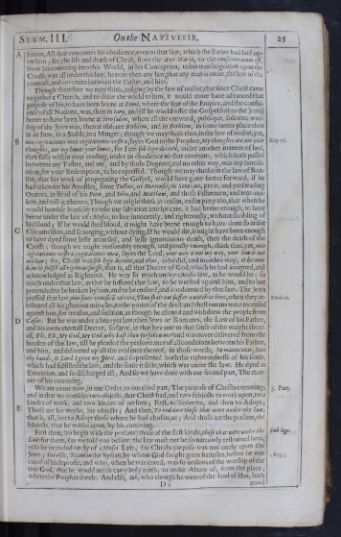 Serm. III.
On the Nativitie.
25
liation, All that concernes his obedience, even to that law, which the Father had laid up-
Serm. III.
On the Nativitie.
25
liation, All that concernes his obedience, even to that law, which the Father had laid up-on him; for, the life and death of Christ, from the Ave Maria, to the consummatum est,
from his comming into this World, in his Conception, to his transmigration upon the
Crosse, was all under this law, heavier then any law, that any man is under, the law of the
contract, and covenant between the Father, and him.
Though therefore we may think, judging by the law of reason, that since Christ came
to gather a Church, and to draw the world to him, it would more have advanced that
purpose of his, to have been borne at Rome, where the seat of the Empire, and the conflu-
ence of all Nations, was, then in Iury, and (if he would offer the Gospel first to the Jews)
better to have been borne at Ierusalem, where all the outward, publique, solemne wor-
ship of the Jews was, then at obscure Bethlem, and in Bethlem, in some better place then
in an Inne, in a Stable, in a Manger; though we may think thus, in the law of reason, yet,
Esay 55. non cogitationes meæ cogitationes vestræ, sayes God in the Prophet, My thoughts are not your
thoughts, nor my lawes your lawes, for I am sub lege decreti, under another manner of law,
then falls within your reading, under an obedience to that covenant, which hath passed
betweene my Father, and me, and by those Degrees, and no other way, was my humili-
ation, for your Redemption, to be expressed. Though we may thinke in the law of Rea-
son, that his work of propagating the Gospel, would have gone better forward, if he
had taken for his Apostles, some Tullies, or Hortensii, or Senecæs, great, and perswading
Orators, in stead of his Peter, and Iohn, and Matthew, and those Fishermen, and tent-ma-
kers, and toll-gatherers; Though we might think in reason, and in piety too, that when he
would humble himselfe to take our salvation into his care, it had beene enough, to have
beene under the law of Moses, to live innocently, and righteously, without shedding of
his bloud; If he would shed bloud, it might have beene enough to have done so in the
Circumcision, and scourging, without dying; If he would die, it might have been enough
to have dyed some lesse accursed, and lesse ignominious death, then the death of the
Crosse; though we might reasonably enough, and piously enough, think thus, yet, non
cogitationes vestræ, cogitationes meæ, sayes the Lord, your way is not my way, your law is not
my law; for, Christ was sub lege decreti, and thus, as he did, and no other way, it became
him to fulfill all righteousnesse, that is, all that Decree of God, which he had accepted, and
acknowledged as Righteous. He was so much under Moses law, as he would be: so
much under that law, as that he suffered that law, to be wrested against him, and to bee
pretended to be broken by him, and to be endited, and condemned by that law. The Jews
Exod. 22. pressed that law, non sines veneficū vivere, Thou shalt not suffer a witch to live, when they at-
tributed all his glorious miracles, to the power of the devil: and the Romans were incensed
against him, for treason, and sedition, as though he aliened and withdrew the people from
Cæsar. But he was under a heavyer law, then Jews or Romanes, the Law of his Father,
and his owne eternall Decree, so farre, as that he came to that sense of the waight there-
of, Eli, Eli, My God, My God, why hast thou forsaken me? and was never delivered from the
burden of this law, till he pleaded the performance of all conditions between his Father,
and him, and delivered up all the evidence thereof, in those words, In manus tuas, Into
thy hands, O Lord I give my spirit, and so presented both the righteousnesse of his soule,
which had fulfilled the law, and the soule it selfe, which was under the law. He dyed in
Execution, and so discharged all; And so we have done with our second part, The man-
ner of his comming.
We are come now, in our Order, to our third part, The purpose of Christs comming;
3. Part. and in that we consider two objects, that Christ had, and two subjects to work upon, two
kindes of work, and two kindes of persons; First, to Redeeme, and then to Adopt;
Those are his works, his objects; And then, To redeeme those that were under the law,
that is, all, but to Adopt those whom he had chosen, us; And those are the persons, the
subjects, that he works upon, by his comming.
Sub lege. First then, (to begin with the persons) those of the first kinde, those that were under the
Law: for them, (as we told you before) the law must not be so narrowly restrained here,
as to be intended onely of Moses Law, for Christs purpose was not onely upon the
Jews; for else, Naaman the Syrian, by whom God fought great battailes, 2 Reg. 5. before he was
cured of his leprosie, and who, when he was cured, was so zealous of the worship of the
true God, that he would needs carry holy earth, to make Altars of, from the place,
where the Prophet dwelt: And else, Iob, who though he were of the land of Hus, hath D2 good
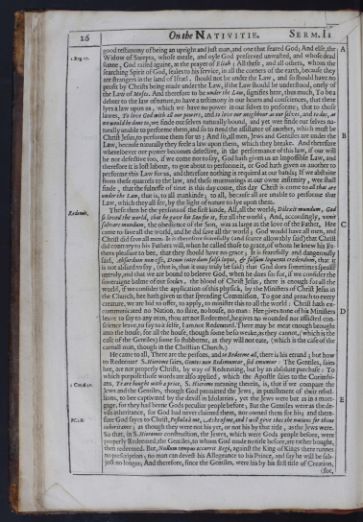 26
On the Nativitie.
Serm. III.
good testimony of being an upright and just man, and one that feared God; And else, the
26
On the Nativitie.
Serm. III.
good testimony of being an upright and just man, and one that feared God; And else, the
1. Reg. 17. Widow of Sarepta, whose meale, and oyle God preserved unwasted, and whose dead
sonne, God raised againe, at the prayer of Eliah; All these, and all others, whom the
searching Spirit of God, seales to his service, in all the corners of the earth, because they
are strangers in the land of Israel, should not be under the Law, and so should have no
profit by Christs being made under the Law, if the Law should be understood, onely of
the Law of Moses. And therefore to be under the Law, signifies here, thus much, To be a
debter to the law of nature, to have a testimony in our hearts and consciences, that there
lyes a law upon us, which we have no power in our selves to performe; that to those
lawes, To love God with all our powers, and to love our neighbour as our selves, and to doe, as
we would be done to, we finde our selves naturally bound, and yet wee finde our selves na-
turally unable to performe them, and so to need the assistance of another, which must be
Christ Jesus, to performe them for us; And so, all men, Jews and Gentiles are under the
Law, because naturally they feele a law upon them, which they breake. And therefore
wheresoever our power becomes defective, in the performance of this law, if our will
be not defective too, if we come not to say, God hath given us an impossible Law, and
therefore it is lost labour, to goe about to performe it, or God hath given us another to
performe this Law for us, and therefore nothing is required at our hands; If we abstaine
from these quarrels to the law, and these murmurings at our owne infirmity, wee shall
finde, that the fulnesse of time is this day come, this day Christ is come to all that are
under the Law, that is, to all mankinde; to all, because all are unable to performe that
Law, which they all see, by the light of nature to lye upon them.
Redemit. These then be the persons of the first kinde, All, all the world; Dilexit mundum, God
so loved the world, that he gave his Son for it, for all the world; And, accordingly, venit
salvare mundum, the obedience of the Son, was as large as the love of the Father, Hee
came to save all the world, and he did save all the world; God would have all men, and
Christ did save all men. It is therefore fearefully (and scarce allowably said) that Christ
did contrary to his Fathers will, when he called those to grace, of whom he knew his Fa-
thers pleasure to bee, that they should have no grace; It is fearefully and dangerously
said, Absurdum non esse, Deum interdum falsa loqui, & falsum loquenti credendum, that it
is not absurd to say, (that is, that it may truly be said) that God does sometimes speake
untruly, and that we are bound to beleeve God, when he does so: for, if we consider the
soveraigne balme of our soules, the blood of Christ Jesus, there is enough for all the
world, if we consider the application of this physick, by the Ministers of Christ Jesus in
the Church, hee hath given us that spreading Commission, To goe and preach to every
creature, we are bid to offer, to apply, to minister this to all the world: Christ hath ex-
communicated no Nation, no shire, no house, no man: Hee gives none of his Ministers
leave to say to any man, thou art not Redeemed, he gives no wounded nor afflicted con-
science leave, to say to it selfe, I am not Redeemed. There may be meat enough brought
into the house, for all the house, though some be so weake, as they cannot, (which is the
case of the Gentiles) some so stubborne, as they will not eate, (which is the case of the
carnall man, though in the Christian Church.)
He came to all, There are the persons, and to Redeeme all, there is his errand; but how
to Redeeme? S. Hierome saies, Gentes non Redimuntur, sed emuntur: The Gentiles, saies
hee, are not properly Christs, by way of Redeeming, but by an absolute purchase: To
which purpose those words are also applied, which the Apostle saies to the Corinthi-
ans, Ye are bought with a price, S. Hieroms meaning therein, is, that if we compare the1 Cor. 6.20.
Jews and the Gentiles, though God permitted the Jews, in punishment of their rebel-
lions, to bee captivated by the devill in Idolatries, yet the Jews were but as in a mort-
gage, for they had beene Gods peculiar people before; But the Gentiles were as the de-
vils inheritance, for God had never claimed them, nor owned them for his; and there-
forePs. 2.8. God sayes to Christ, Postula à me, Aske of me, and I will give thee the nations for thine
inheritance; as though they were not his yet, or not his by that title, as the Jews were.
So that, in S. Hieromes construction, the Jewes, which were Gods people before, were
properly Redeemed, the Gentiles, to whom God made no title before, are rather bought,
then redeemed. But, Nullum tempus occurrit Regi, against the King of Kings there runnes
no prescription; no man can devest his Allegeance to his Prince, and say he will be sub-
ject no longer; And therefore, since the Gentiles, were his by his first title of Creation, (for,
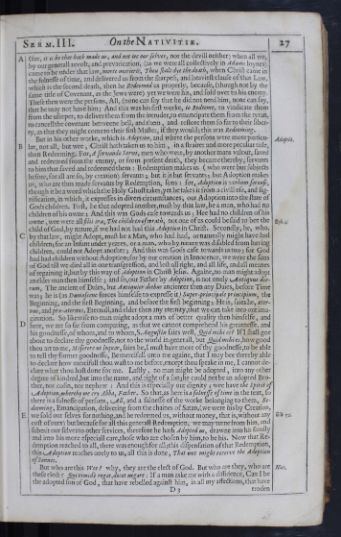 Serm. III.
On the Nativitie.
27
(for, it is he that hath made us, and not we our selves, nor the devill neither) when all we,
Serm. III.
On the Nativitie.
27
(for, it is he that hath made us, and not we our selves, nor the devill neither) when all we,
by our generall revolt, and prevarication, (as we were all collectively in Adams loynes)
came to be under that law, morte morieris, Thou shalt dye the death, when Christ came in
the fulnesse of time, and delivered us from the sharpest, and heaviest clause of that Law,
which is the second death, then he Redeemed us properly, because, (though not by the
same title of Covenant, as the Jews were) yet we were his, and sold over to his enemy.
These then were the persons, All, (none can say that he did not need him, none can say,
that he may not have him) And this was his first worke, to Redeeme, to vindicate them
from the usurper, to deliver them from the intruder, to emancipate them from the tyran,
to cancell the covenant betweene hell, and them, and restore them so far to their liber-
ty, as that they might come to their first Master, if they would; this was Redeeming.
Adoptio. But in his other worke, which is Adoption, and where the persons were more particu-
lar, not all, but wee, Christ hath taken us to him, in a straiter and more peculiar title,
then Redeeming. For, A servando Servi, men who were, by another mans valour, saved
and redeemed from the enemy, or from present death, they became thereby, servants
to him that saved and redeemed them: Redemption makes us (who were but subjects
before, for all are so, by creation) servants; but it is but servants; but Adoption makes
us, who are thus made servants by Redemption, sons: for, Adoption is verbum forense,
though it be a word which the Holy Ghost takes, yet he takes it from a civill use, and sig-
nification, in which, it expresses in divers circumstances, our Adoption into the state of
Gods children. First, he that adopted another, must by that law, be a man, who had no
children of his owne; And this was Gods case towards us; Hee had no children of his
owne, wee were all filii iræ, The children of wrath, not one of us could be said to bee the
child of God, by nature, if we had not had this Adoption in Christ. Secondly, he, who,
Eph. 2. by that law, might Adopt, must be a Man, who had had, or naturally might have had
children; for an Infant under yeares, or a man, who by nature was disabled from having
children, could not Adopt another; And this was Gods case towards us too; for God
had had children without Adoption; for by our creation in Innocence, we were the sons
of God till we died all in one transgression, and lost all right, and all life, and all meanes
of regaining it, but by this way of Adoption in Christ Jesus. Againe, no man might adopt
an elder man then himselfe; and so, our Father by Adoption, is not onely Antiquus die-
rum, The ancient of Daies, but Antiquior diebus ancienter then any Daies, before Time
was; he is (as Damascene forces himselfe to expresse it) Super-principale principium, the
Beginning, and the first Beginning, and before the first beginning; He is, saies he, æter-
nus, and præ-æternus, Eternall, and elder then any eternity, that we can take into our ima-
gination. So likewise no man might adopt a man of better quality then himselfe, and
here, we are so far from comparing, as that we cannot comprehend his greatnesse, and
his goodnesse, of whom, and to whom, S. Augustin saies well, Quid mihi es? If I shall goe
about to declare thy goodnesse, not to the world in generall, but Quid mihi es, how good
thou art to me, Miserere ut loquar, saies he, I must have more of thy goodnesse, to be able
to tell thy former goodnesse, Be mercifull unto me againe, that I may bee thereby able
to declare how mercifull thou wast to me before, except thou speake in me, I cannot de-
clare what thou hast done for me. Lastly, no man might be adopted, into any other
degree of kindred, but into the name, and right of a son; he could not be an adopted Bro-
ther, nor cosin, nor nephew: And this is especially our dignity; wee have the Spirit of
Adoption, whereby we cry Abba, Father. So that, as here is a fulnesse of time in the text, so
there is a fulnesse of persons, All, and a fulnesse of the worke belonging to them, Re-
deeming, Emancipation, delivering from the chaines of Satan, (we were his by Creation,
Esa. 52. we sold our selves for nothing, and he redeemed us, without money, that is, without any
cost of ours) but because for all this generall Redemption, we may turne from him, and
submit our selves to other services, therefore he hath Adopted us, drawne into his family
and into his more especiall care, those who are chosen by him, to be his. Now that Re-
demption reached to all, there was enough for all; this dispensation of that Redemption,
this Adoption reaches onely to us, all this is done, That wee might receive the Adoption
of Sonnes.
Nos. But who are this Wee? why, they are the elect of God. But who are they, who are
these elect? Qui timidè rogat, docet negare: If a man aske me with a diffidence, Can I be
the adopted son of God, that have rebelled against him, in all my affections, that have D3 troden
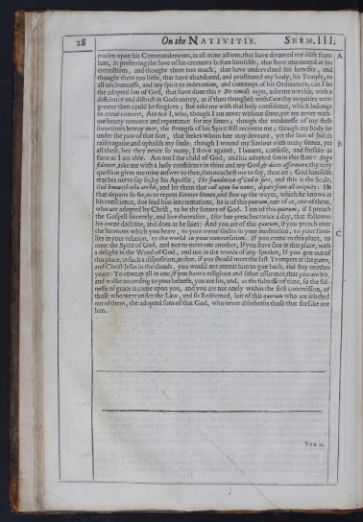 28
On the Nativitie.
Serm. III.
troden upon his Commandements, in all mine actions, that have divorced my selfe from
28
On the Nativitie.
Serm. III.
troden upon his Commandements, in all mine actions, that have divorced my selfe from
him, in preferring the love of his creatures before himselfe, that have murmured at his
corrections, and thought them too much, that have undervalued his benefits, and
thought them too little, that have abandoned, and prostituted my body, his Temple, to
all uncleannesse, and my spirit to indevotion, and contempt of his Ordinances; can I be
the adopted son of God, that have done this? Ne timidè roges, aske me not this, with a
diffidence and distrust in Gods mercy, as if thou thoughtst with Cain thy iniquities were
greater then could be forgiven; But aske me with that holy confidence, which belongs
to a true convert, Am not I, who, though I am never without sinne, yet am never with-
out hearty remorce and repentance for my sinnes; though the weaknesse of my flesh
sometimes betray mee, the strength of his Spirit still recovers me; though my body be
under the paw of that lion, that seekes whom hee may devoure, yet the lion of Judah
raises againe and upholds my soule; though I wound my Saviour with many sinnes, yet
all these, bee they never so many, I strive against, I lament, confesse, and forsake as
farre as I am able. Am not I the child of God, and his adopted son in this state? Roga
fidenter, aske me with a holy confidence in thine and my God, & doces affirmare, thy very
question gives me mine answer to thee, thou teachest me to say, thou art; God himselfe
teaches me to say so, by his Apostle, The foundation of God is sure, and this is the Seale,
God knoweth who are his, and let them that call upon his name, depart from all iniquity: He
that departs so far, as to repent former sinnes, and shut up the wayes, which he knows in
his conscience, doe lead him into tentations, he is of this quorum, one of us, one of them,
who are adopted by Christ, to be the sonnes of God. I am of this quorum, if I preach
the Gospell sincerely, and live thereafter, (for hee preaches twice a day, that followes
his owne doctrine, and does as he saies) And you are of this quorum, if you preach over
the Sermons which you heare, to your owne soules in your meditation, to your fami-
lies in your relation, to the world in your conversation. If you come to this place, to
meet the Spirit of God, and not to meet one another, If you have sate in this place, with
a delight in the Word of God, and not in the words of any speaker, If you goe out of
this place, in such a disposition, as that, if you should meet the last Trumpets at the gates,
and Christ Jesus in the clouds, you would not intreat him to goe back, and stay another
yeare: To enwrap all in one, if you have a religious and sober assurance, that you are his,
and walke according to your beleefe, you are his, and, as the fulnesse of time, so the ful-
nesse of grace is come upon you, and you are not onely within the first commission, of
those who were under the Law, and so Redeemed, but of this quorum who are selected
out of them, the adopted sons of that God, who never disinherits those that forsake not
him. Serm.
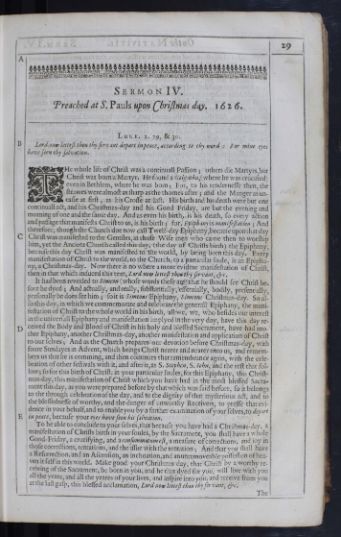 Serm. IV.
On the Nativitie.
29
Serm. IV.
On the Nativitie.
29
 Sermon IV.
Sermon IV.
Preached at S. Pauls upon Christmas day. 1626.
Luke. 2.29, & 30.
Lord now lettest thou thy servant depart in peace, according to thy word: For mine eyes
have seen thy salvation. THeThe whole life of Christ was a continuall Passion; others die Martyrs, but
Christ was born a Martyr. He found a Golgatha, (where he was crucified)
even in Bethlem, where he was born; For, to his tendernesse then, the
strawes were almost as sharp as the thornes after; and the Manger as un-
easie at first, as his Crosse at last. His birth and his death were but one
continuall act, and his Christmas-day and his Good Friday, are but the evening and
morning of one and the same day. And as even his birth, is his death, so every action
and passage that manifests Christ to us, is his birth; for, Epiphany is manifestation; And
therefore, though the Church doe now call Twelf-day Epiphany, because upon that day
Christ was manifested to the Gentiles, in those Wise men who came then to worship
him, yet the Ancient Church called this day, (the day of Christs birth) the Epiphany,
because this day Christ was manifested to the world, by being born this day. Every
manifestation of Christ to the world, to the Church, to a particular soule, is an Epipha-
ny, a Christmas-day. Now there is no where a more evident manifestation of Christ,
then in that which induced this text, Lord now lettest thou thy servant, &c. It had been revealed to Simeon (whose words these are) that he should see Christ be-
fore he dyed; And actually, and really, substantially, essentially, bodily, presentially,
personally he does see him; so it is Simeons Epiphany, Simeons Christmas-day. So al-
so this day, in which we commemorate and celebrate the generall Epiphany, the mani-
festation of Christ to the whole world in his birth, all we, we, who besides our interest
in the universall Epiphany and manifestation implyed in the very day, have this day re-
ceived the Body and Blood of Christ in his holy and blessed Sacrament, have had ano-
ther Epiphany, another Christmas-day, another manifestation and application of Christ
to our selves; And as the Church prepares our devotion before Christmas-day, with
foure Sundayes in Advent, which brings Christ nearer and nearer unto us, and remem-
bers us that he is comming, and then continues that remembrance again, with the cele-
bration of other festivals with it, and after it, as S. Stephen, S. Iohn, and the rest that fol-
low; so for this birth of Christ, in your particular soules, for this Epiphany, this Christ-
mas-day, this manifestation of Christ which you have had in the most blessed Sacra-
ment this day, as you were prepared before by that which was said before, so it belongs
to the through celebration of the day, and to the dignity of that mysterious act, and to
the blessednesse of worthy, and the danger of unworthy Receivers, to presse that evi-
dence in your behalf, and to enable you by a farther examination of your selves, to depart
in peace, because your eyes have seen his salvation. To be able to conclude to your selves, that because you have had a Christmas-day, a
manifestation of Christs birth in your soules, by the Sacrament, you shall have a whole
Good-Friday, a crucifying, and a consummatum est, a measure of corrections, and joy in
those corrections, tentations, and the issue with the tentation; And that you shall have
a Resurrection, and an Ascension, an inchoation, and an unremoveable possession of hea-
ven it self in this world. Make good your Christmas day, that Christ by a worthy re-
ceiving of the Sacrament, be born in you, and he that dyed for you, will live with you
all the yeare, and all the yeares of your lives, and inspire into you, and receive from you
at the last gasp, this blessed acclamation, Lord now lettest thou thy servant, &c. The
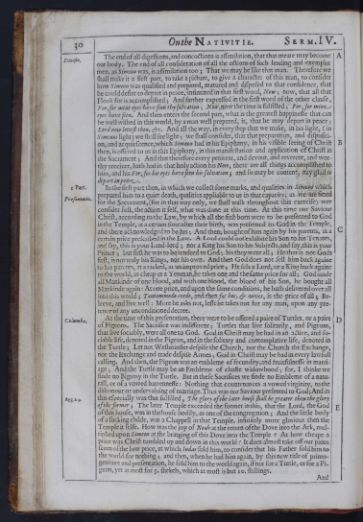 30
On the Nativitie.
Serm. IV.
30
On the Nativitie.
Serm. IV.
The end of all digestions, Divisio. and concoctions is assimilation, that that meate may become
our body. The end of all consideration of all the actions of such leading and exemplar
men, as Simeon was, is assimilation too; That we may be like that man. Therefore we
shall make it a first part, to take a picture, to give a character of this man, to consider
how Simeon was qualified and prepared, matured and disposed to that confidence, that
he could desire to depart in peace, intimated in that first word, Now; now, that all that
I look for is accomplished; And farther expressed in the first word of the other clause,
For, for mine eyes have seen thy salvation; Now, now the time is fulfilled; For, for mine
eyes have seen. And then enters the second part, what is the greatest happinesse that can
be well wished in this world, by a man well prepared, is, that he may depart in peace;
Lord now lettest thou, &c. And all the way, in every step that we make, in his light, (in
Simeons light) we shall see light; we shall consider, that that preparation, and dispositi-
on, and acquiescence, which Simeon had in his Epiphany, in his visible seeing of Christ
then, is offered to us in this Epiphany, in this manifestation and application of Christ in
the Sacrament; And that therefore every penitent, and devout, and reverent, and wor-
thy receiver, hath had in that holy action his Now, there are all things accomplished to
him, and his For, for his eyes have seen his salvation; and so may be content, nay glad to
depart in peace.
In the first part then, 1 Part. in which we collect some marks, and qualities in Simeon which
prepared him to a quiet death, qualities appliable to us in that capacity, as we are fitted
for the Sacrament, Præsentatio. (for in that way only, we shall walk throughout this exercise) wee
consider first, the action it self, what was done at this time. At this time our Saviour
Christ, according to the Law, by which all the first born were to be presented to God
in the Temple, at a certain time after their birth, was presented to God in the Temple,
and there acknowledged to be his; And then, bought of him again by his parents, at a
certain price prescribed in the Law. A Lord could not exhibite his Son to his Tenants,
and say, this is your Land-lord; nor a King his Son to his Subjects, and say, this is your
Prince; but first he was to be tendred to God; his they were all; He that is not Gods
first, is not truly his Kings, nor his own. And then God does not sell him back againe
to his parents, at a racked, at an improved price; He sels a Lord, or a King back againe
to the world, as cheap as a Yeoman, he takes one and the same price for all; God made
all Mankinde of one blood, and with one blood, the blood of his Son, he bought all
Mankinde again: At one price, and upon the same conditions, he hath delivered over all
into this world; Tantummodo crede, and then fac hoc, & vives, is the price of all; Be-
leeve, and live well: More he asks not, lesse he takes not for any man, upon any pre-
tence of any unconditioned decree. At the time of this presentation, there were to be offered a paire of Turtles, or a paire
of Pigeons.Columbæ. The Sacrifice was indifferent; Turtles that live solitarily, and Pigeons,
that live sociably, were all one to God. God in Christ may be had in an active, and so-
ciable life, denoted in the Pigeon, and in the solitary and contemplative life, denoted in
the Turtle; Let not Westminster despise the Church, nor the Church the Exchange,
nor the Exchange and trade despise Armes; God in Christ may be had in every lawfull
calling. And then, the Pigeon was an embleme of fecundity, and fruitfulnesse in marri-
age; And the Turtle may be an Embleme of chaste widowhood; for, I thinke we
finde no Bigamy in the Turtle. But in these Sacrifices we finde no Embleme of a natu-
rall, or of a vowed barrennesse: Nothing that countenances a vowed virginity, to the
dishonour or undervaluing of marriage. Thus was our Saviour presented to God; And in
this especially was that fulfilled, Agg. 2.9. The glory of the later house shall be greater then the glory
of the former; The later Temple exceeded the former in this, that the Lord, the God
of this house, was in the house bodily, as one of the congregation; And the little body
of a sucking childe, was a Chappell in that Temple, infinitely more glorious then the
Temple it selfe. How was the joy of Noah at the return of the Dove into the Ark, mul-
tiplied upon Simeon at the bringing of this Dove into the Temple? At how cheape a
price was Christ tumbled up and down in this world? It does almost take off our pious
scorn of the low price, at which Iudas sold him, to consider that his Father sold him to
the world for nothing; and then, when he had him again, by this new title of primo-
geniture and presentation, he sold him to the world again, if not for a Turtle, or for a Pi-
geon, yet at most for 5. shekels, which at most is but 10. shillings. And
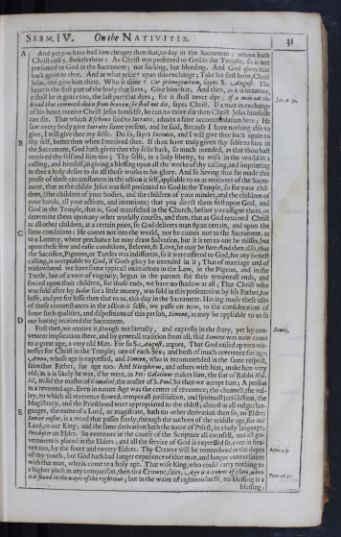 Serm. IV.
On the Nativitie.
31
Serm. IV.
On the Nativitie.
31
And yet you have had him cheaper then that, to day in the Sacrament: whom hath
Christ cost 5. shekels there? As Christ was presented to God in the Temple, so is hee
presented to God in the Sacrament; not sucking, but bleeding. And God gives him
back again to thee. And at what price? upon this exchange; Take his first born, Christ
Jesus, and give him thine. Who is thine? Cor primogenitum, sayes S. August: The
heart is the first part of the body that lives; Give him that; And then, as it is in nature,
it shall be in grace too, the last part that dyes; for it shall never dye;Joh,. 6.50. If a man eat the
bread that commeth down from heaven, he shall not die, sayes Christ. If a man in exchange
of his heart receive Christ Jesus himselfe, he can no more die then Christ Jesus himselfe
can die. That which Eschines said to Socrates, admits a faire accommodation here; He
saw every body give Socrates some present, and he said, Because I have nothing else to
give, I will give thee my selfe. Do so, sayes Socrates, and I will give thee back again to
thy self, better then when I received thee. If thou have truly given thy selfe to him in
the Sacrament, God hath given thee thy selfe back, so much mended, as that thou hast
received thy self and him too; Thy selfe, in a holy liberty, to walk in the world in a
calling, and himself, in giving a blessing upon all the works of thy calling, and imprinting
in thee a holy desire to do all those works to his glory. And so having thus far made this
profit of these circumstances in the action it self, appliable to us as receivers of the Sacra-
ment, that as the childe Jesus was first presented to God in the Temple, so for your chil-
dren, (the children of your bodies, and the children of your mindes, and the children of
your hands, all your actions, and intentions) that you direct them first upon God, and
God in the Temple, that is, God manifested in the Church, before you assigne them, or
determine them upon any other worldly courses, and then, that as God returned Christ
as all other children, at a certain price, so God delivers man upon certain, and upon the
same conditions: He comes not into the world, nor he comes not to the Sacrament, as
to a Lottery, where perchance he may draw Salvation, but it is ten to one he misses, but
upon these few and easie conditions, Beleeve, & Love, he may be sure: And then also, that
the Sacrifice, Pigeons, or Turtles was indifferent, so it were offered to God, for any honest
calling, is acceptable to God, if Gods glory be intended in it; That of marriage and of
widowhood we have some typicall intimations in the Law, in the Pigeon, and in the
Turtle, but of a vow of virginity, begun in the parents for their temporall ends, and
forced upon their children, for those ends, we have no shadow at all; That Christ who
was sold after by Iudas for a little money, was sold in this presentation by his Father, for
lesse, and yet for lesse then that to us, this day in the Sacrament. Having made these uses
of these circumstances in the action it selfe, we passeion now, to the consideration of
some such qualities, and dispositions of this person, Simeon, as may be appliable to us in
our having received the Sacrament.
First then, we receive it, though not literally, and expresly in the story, Senex. yet by con-
venient implication there, and by generall tradition from all, that Simeon was now come
to a great age, a very old Man. For so S. August. argues, That God raised up two wit-
nesses for Christ in the Temple; one of each Sex; and both of much reverence for age;
Anna, whose age is expressed, and Simeon, who is recommended in the same respect,
saies that Father, for age too. And Nicephorus, and others with him, make him very
old; as it is likely he was, if he were, as Pet: Galatinus makes him, the son of Rabbi Hil-
lel, Hillel the master of Gamaliel, the master of S. Paul. So then we accept him; A person
in a reverend age. Even in nature Age was the center of reverence; the channell, the val-
ley, to which all reverence flowed; temporall jurisdiction, and spirituall jurisdiction, the
Magistracy, and the Priesthood were appropriated to the eldest; almost in all vulgar lan-
guages, the name of a Lord, or magistrate, hath no other derivation then so, an Elder;
Senior noster, is a word that passes freely, through the authors of the middle age, for our
Lord, or our King; and the same derivation hath the name of Priest, in a holy language,
Presbyter an Elder. So evermore in the course of the Scripture all counsell, and all go-
vernment is placed in the Elders; and all the service of God is expressed so, even in hea-
ven too, by the foure and twenty Elders.Apoc. 4.9. Thy Creator will be remembred in the dayes
of thy youth; but God hath had longer experience of that man, and longer conversation
with that man, who is come to a holy age. That wise King, who could carry nothing to
a higher pitch in any comparison, then to a Crowne, saies, Age is a crowne of glory,Prov. 16.31. when
it is found in the wayes of the righteous; but in the waies of righteousnesse, no blessing is a blessing;
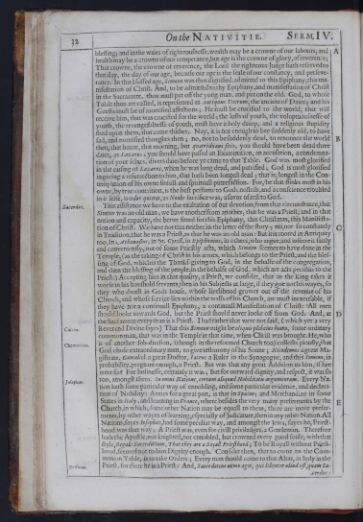 32
On the Nativitie.
Serm. IV.
blessing; and in the waies of righteousnesse, wealth may be a crowne of our labours, and
32
On the Nativitie.
Serm. IV.
blessing; and in the waies of righteousnesse, wealth may be a crowne of our labours, and
health may be a crowne of our temperance, but age is the crowne of glory, of reverence;
That crowne, the crowne of reverence, the Lord the righteous Judge hath reserved to
that day, the day of our age, because our age is the seale of our constancy, and perseve-
rance. In this blessed age, Simeon was thus dignified, admitted to this Epiphany, this ma-
nifestation of Christ. And, to be admitted to thy Epiphany, and manifestation of Christ
in the Sacrament, thou must put off the yong man, and put on the old. God, to whose
Table thou art called, is represented as Antiquus Dierum, the ancient of Daies; and his
Guests must be of mortified affections; He must be crucified to the world, that will
receive him, that was crucified for the world; the lusts of youth, the voluptuousnesse of
youth, the revengefulnesse of youth, must have a holy damp, and a religious stupidity
shed upon them, that come thither. Nay, it is not enough to bee suddenly old, to have
sad, and mortified thoughts then; no, nor to be suddenly dead, to renounce the world
then, that houre, that morning, but quatriduani sitis, you should have been dead three
daies, as Lazarus; you should have passed an Examination, an accusation, a condemna-
tion of your selves, divers daies before ye came to that Table. God was most glorified
in the raising of Lazarus, when he was long dead, and putrified; God is most glorified
in giving a resurrection to him, that hath been longest dead; that is, longest in the Con-
templation of his owne sinfull and spirituall putrefaction. For, he that stinks most in his
owne, by true contrition, is the best perfume to Gods nostrils, and a conscience troubled
in it selfe, is Odor quietis, as Noahs sacrifice was, a savor of rest to God.
This assistance we have to the exaltation of our devotion, from that circumstance, that
Simeon was an old man;Sacerdos. we have another from another, that he was a Priest, and in that
notion and capacity, the better fitted for this Epiphany, this Christmas, this Manifesta-
tion of Christ. We have not this neither in the letter of the story; no, nor so constantly
in Tradition, that he was a Priest, as that he was an old man: But it is rooted in Antiquity
too; In Athanasius, in St. Cyrill, in Epiphanius, in others, who argue, and inferre it fairly
and conveniently, out of some Priestly acts, which Simeon seemes to have done in the
Temple, (as the taking of Christ in his armes, which belongs to the Priest, and the bles-
sing of God, which is the Thanks-giving to God, in the behalfe of the congregation,
and then the blessing of the people, in the behalfe of God, which are acts peculiar to the
Priest.) Accepting him in that quality, a Priest, we consider, that as the King takes it
worse in his houshold servants, then in his Subjects at large, if they goe not his wayes, so
they who dwell in Gods house, whose livelihood growes out of the revenue of his
Church, and whose service lies within the walls of his Church, are most inexcusable, if
they have not a continuall Epiphany, a continuall Manifestation of Christ: All men
should looke towards God, but the Priest should never looke off from God. And, at
the Sacrament every man is a Priest. I had rather that were not said, (which yet a very
Reverend Divine sayes) That this Simeon might be aliquis plebeius homo,Calvin. some ordinary
common man, that was in the Temple at that time, when Christ was brought. He, who
is of another sub-division, Chemnicius. (though in the reformed Church too) collects piously, that
God chose extraordinary men, to give testimony of his Sonne; Nicodemus a great Ma-
gistrate, Gamaliel a great Doctor, Iairus a Ruler in the Synagogue, and this Simeon, in
probability, pregnant enough, a Priest. But was that any great Addition to him, if hee
were so? For holinesse, certainly it was; But for outward dignity, and respect, it was so
too, Josephus. amongst them. In omni Natione, certum aliquod Nobilitatis argumentum. Every Na-
tion hath some particular way of ennobling, and some particular evidence, and declara-
tion of Nobility: Armes for a great part, is that in Spaine; and Merchandize in some
States in Italy; and learning in France, where besides the very many preferments by the
Church, in which, some other Nation may be equall to them, there are more prefer-
ments, by other wayes of learning, especially of Judicature, then in any other Nation. All
Nations, sayes Iosephus, had some peculiar way, and amongst the Jews, sayes he, Priest-
hood was that way; A Priest was, even for civill priviledges, a Gentleman. Therefore
hath the Apostle, not knighted, nor ennobled, but crowned every good soule, with that
style, Regale Sacerdotium, That they are a Royall Priesthood; To be Royall without Priest-
hood, seemed not to him Dignity enough. Consider then, that to come to the Com-
munion Table, is to take Orders; Every man should come to that Altar, as holy as the
Priest, Erasmus. for there he is a Priest: And, Sacer dotem nemo agit, qui libenter aliud est, quam Sa-
cerdos:
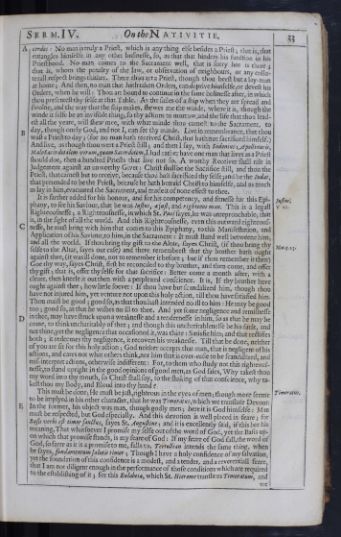 Serm. IV.
On the Nativitie.
33
cerdos: No man is truly a Priest, which is any thing else besides a Priest; that is, that
Serm. IV.
On the Nativitie.
33
cerdos: No man is truly a Priest, which is any thing else besides a Priest; that is, that
entangles himselfe in any other businesse, so, as that that hinders his function in his
Priesthood. No man comes to the Sacrament well, that is sorry hee is there;
that is, whom the penalty of the law, or observation of neighbours, or any colla-
terall respect brings thither. There thou art a Priest, though thou beest but a lay-man
at home; And then, no man that hath taken Orders, can deprive himselfe, or devest his
Orders, when he will: Thou art bound to continue in the same holinesse after, in which
thou presentest thy selfe at that Table. As the sailes of a ship when they are spread and
swolne, and the way that the ship makes, shewes me the winde, where it is, though the
winde it selfe be an invisible thing; so thy actions to morrow, and the life that thou lead-
est all the yeare, will shew mee, with what minde thou camest to the Sacrament, to
day, though onely God, and not I, can see thy minde. Live in remembrance, that thou
wast a Priest to day; (for no man hath received Christ, that hath not sacrificed himself.)
And live, as though thou wert a Priest still; and then I say, with Sidonius Apollinaris,
Malo Sacerdotalem virum, quam Sacerdotem, I had rather have one man that lives as a Priest
should doe, then a hundred Priests that live not so. A worthy Receiver shall rise in
Judgement against an unworthy Giver: Christ shall be the Sacrifice still, and thou the
Priest, that camest but to receive, because thou hast sacrificed thy selfe; and he the Iudas,
that pretended to be the Priest, because he hath betrald Christ to himselfe, and as much
as lay in him, evacuated the Sacrament, and made it of none effect to thee.
It is farther added for his honour, and for his competency, and fitnesse for this Epi-
phany, Iustus. V 25. to see his Saviour, that he was Iustus, a just, and righteous man. This is a legall
Righteousnesse; a Righteousnesse, in which St. Paul sayes, he was unreproachable; that
is, in the sight of all the world. And this Righteousnesse, even this outward righteous-
nesse, he must bring with him that comes to this Epiphany, to this Manifestation, and
Application of his Saviour, to him, in the Sacrament: It must stand well betweene him,
and all the world. If thou bring thy gift to the Altar, sayes Christ, Mat. 5.23. (if thou bring thy
selfe to the Altar, sayes our case) and there remembrest that thy brother hath ought
against thee, (it was ill done, not to remember it before; but if thou remember it then)
Goe thy way, sayes Christ, first be reconciled to thy brother, and then come, and offer
thy gift; that is, offer thy selfe for that sacrifice: Better come a month after, with a
cleare, then kneele it out then with a perplexed conscience. It is, If thy brother have
ought against thee; how little soever: If thou have but scandalized him, though thou
have not injured him, yet venture not upon this holy action, till thou have satisfied him.
Thou maist be good; good so, as that thou hast intended no ill to him: He may be good
too; good so, as that he wishes no ill to thee. And yet some negligence and remisnesse
in thee, may have struck upon a weaknesse and a tendernesse in him, so as that he may be
come, to think uncharitably of thee; and though this uncharitablenesse be his fault, and
not thine, yet the negligence that occasioned it, was thine: Satisfie him; and that rectifies
both; it redeemes thy negligence, it recovers his weaknesse. Till that be done, neither
of you are fit for this holy action; God neither accepts that man, that is negligent of his
actions, and cares not what others think, nor him that is over-easie to be scandalized, and
mis-interpret actions, otherwise indifferent: For, to them who study not this righteous-
nesse, to stand upright in the good opinions of good men, as God saies, Why takest thou
my word into thy mouth, so Christ shall say, to the shaking of that conscience, why ta-
kest thou my Body, and Bloud into thy hand?
This must be done; He must be just, righteous in the eyes of men;Timoratus. though more seeme
to be implyed in his other character, that he was Timoratus, which we translate Devout:
In the former, his object was man, though godly men; here it is God himselfe: Man
must be respected, but God especially. And this devotion is well placed in feare; for
Basis verbi est timor sanctus, sayes St. Augustine; and it is excellently said, if this bee his
meaning, That whatsoever I promise my selfe out of the word of God, yet the Basis up-
on which that promise stands, is my feare of God: If my feare of God fall, the word of
God, so farre as it is a promise to me, falls to. Tertullian intends the same thing, when
he sayes, fundamentum salutis timor; Though I have a holy confidence of my salvation,
yet the foundation of this confidence is a modest, and a tender, and a reverentiall feare,
that I am not diligent enough in the performance of those conditions which are required
to the establishing of it; for this Eulabeia, which St. Hierome translates Timoratum, and we
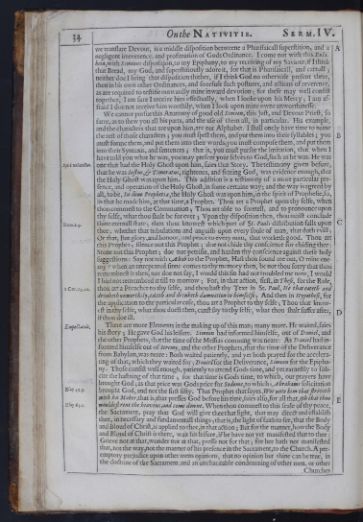 34
On the Nativitie.
Serm. IV.
we translate Devout, is a middle disposition betweene a Pharisaicall superstition, and a
34
On the Nativitie.
Serm. IV.
we translate Devout, is a middle disposition betweene a Pharisaicall superstition, and a
negligent irreverence, and profanation of Gods Ordinance. I come not with this Eula-
beia, with Simeons disposition, to my Epiphany, to my receiving of my Saviour; if I think
that Bread, my God, and superstitiously adore it, for that is Pharisaicall, and carnall;
neither doe I bring that disposition thither, if I think God no otherwise present there,
then in his own other Ordinances, and so refuse such postures, and actions of reverence,
as are required to testifie outwardly mine inward devotion; for these may well consist
together, I am sure I receive him effectually, when I looke upon his Mercy; I am af-
fraid I doe not receive him worthily, when I look upon mine owne unworthinesse.
We cannot pursue this Anatomy of good old Simeon, this Just, and Devout Priest, so
farre, as to shew you all his parts, and the use of them all, in particular. His example,
and the characters that are upon him, are our Alphabet. I shall onely have time to name
the rest of those characters; you must spell them, and put them into their syllables; you
must forme them, and put them into their words; you must compose them, and put them
into their Syntaxis, and sentences; that is, you must pursue the imitation, that when I
have told you what he was, you may present your selves to God, such as he was. He was
one that had the Holy Ghost upon him, Spiritus Sancius. saies that Story. The testimony given before,
that he was Iustus, & Timoratus, righteous, and fearing God, was evidence enough, that
the Holy Ghost was upon him. This addition is a testimony of a more particular pre-
sence, and operation of the Holy Ghost, in some certaine way; and the way is agreed by
all, to be, In dono Prophetiæ, the Holy Ghost was upon him, in the spirit of Prophesie, so,
as that he made him, at that time, a Prophet. Thou art a Prophet upon thy selfe, when
thou commest to the Communion; Thou art able to foretell, and to pronounce upon
thy selfe, what thou shalt be for ever; Vpon thy disposition then, thou maist conclude
thine eternall state;Rom. 2.9. then thou knowest which part of St. Pauls distribution falls upon
thee; whether that tribulations and anguish upon every soule of man, that doth evill;
Or that, But glory, and honour, and peace to every man, that worketh good. Thou art
this Prophet; silence not this Prophet; doe not chide thy conscience for chiding thee;
Stone not this Prophet; doe not petrifie, and harden thy conscience against these holy
suggestions: Say not with Ahab to the Prophet, Hast thou found me out, O mine ene-
my? when an unrepented sinne comes to thy memory then, be not thou sorry that thou
remembrest it then, nor doe not say, I would this sin had not troubled me now, I would
I had not remembred it till to morrow; For, in that action, first, in Thesi, for the Rule,
thou art a Preacher to thy selfe, 1 Cor. 11.20. and thou hast thy. Text in St. Paul, He that eateth and
drinketh unworthily, eateth and drinketh damnation to himselfe; And then in Hypothesi, for
the application to the particular case, thou art a Prophet to thy selfe; Thou that know-
est in thy selfe, what thou doest then, canst say to thy selfe, what thou shalt suffer after,
if thou doe ill.
There are more Elements in the making up of this man; many more. He waited, saies
his story;Expectavit. He gave God his leisure. Simeon had informed himselfe, out of Daniel, and
the other Prophets, that the time of the Messias comming was neare: As Daniel had in-
formed himselfe out of Ieremy, and the other Prophets, that the time of the Deliverance
from Babylon, was neare: Both waited patiently, and yet both prayed for the accelera-
ting of that, which they waited for; Daniel for the Deliverance, Simeon for the Epipha-
ny. Those consist well enough, patiently to attend Gods time, and yet earnestly to soli-
cite the hastning of that time; for that time is Gods time, to which, our prayers have
brought God; as that price was Gods price for Sodome, to which Abrahams solicitation
brought God, Esay 45.9. and not the first fifty. That Prophet that sayes, Woe unto him that striveth
with his Maker, that is, that presses God before his time, saies also, for all that, Oh that thou
wouldest rent the heavens,Esay 64.1. and come downe. When thou commest to this seale of thy peace,
the Sacrament, pray that God will give thee that light, that may direct and establish
thee, in necessary and fundamentall things; that is, the light of faith to see, that the Body
and Bloud of Christ, is applied to thee, in that action; But for the manner, how the Body
and Bloud of Christ is there, wait his leisure, if he have not yet manifested that to thee:
Grieve not at that, wonder not at that, presse not for that; for hee hath not manifested
that, not the way, not the manner of his presence in the Sacrament, to the Church. A per-
emptory prejudice upon other mens opinions, that no opinion but thine can be true, in
the doctrine of the Sacrament, and an un charitable condemning of other men, or other Churches
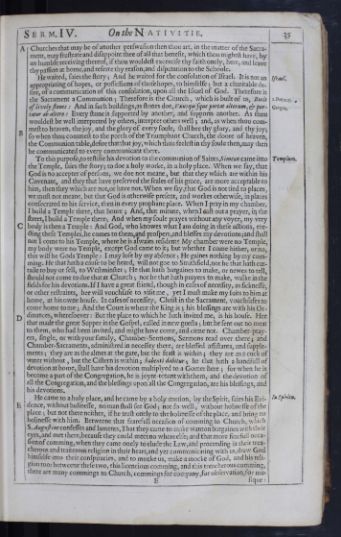 Serm. IV.
On the Nativitie.
35
Churches that may be of another perswasion then thou art, in the matter of the Sacra-
Serm. IV.
On the Nativitie.
35
Churches that may be of another perswasion then thou art, in the matter of the Sacra-ment, may frustrate and disappoint thee of all that benefit, which thou mightst have, by
an humble receiving thereof, if thou wouldest excercise thy faith onely, here, and leave
thy passion at home, and referre thy reason, and disputation to the Schoole.
He waited, saies the story; And he waited for the consolation of Israel.Israel. It is not an
appropriating of hopes, or possessions of those hopes, to himselfe; but a charitable de-
sire, of a communication of this consolation, upon all the Israel of God. Therefore is
the Sacrament a Communion; Therefore is the Church, which is built of us, 1. Pet. 2.5. Built
of lively stones: Gregor. And in such buildings, as stones doe, Vnusquisque portat alterum, & por-
tatur ab altero: Every stone is supported by another, and supports another. As thou
wouldest be well interpreted by others, interpret others well; and, as when thou com-
mest to heaven, the joy, and the glory of every soule, shall bee thy glory, and thy joy;
so when thou commest to the porch of the Triumphant Church, the doore of heaven,
the Communion table, desire that that joy, which thou feelest in thy soule then, may then
be communicated to every communicant there.
To this purpose, to testifie his devotion to the communion of Saints, Templum. Simeon came into
the Temple, saies the story; to doe a holy worke, in a holy place. When we say, that
God is no accepter of persons, we doe not meane, but that they which are within his
Covenant, and they that have preserved the seales of his grace, are more acceptable to
him, then they which are not, or have not. When we say, that God is not tied to places,
we must not meane, but that God is otherwise present, and workes otherwise, in places
consecrated to his service, then in every prophane place. When I pray in my chamber,
I build a Temple there, that houre; And, that minute, when I cast out a prayer, in the
street, I build a Temple there; And when my soule prayes without any voyce, my very
body is then a Temple: And God, who knowes what I am doing in these actions, ere-
cting these Temples, he comes to them and prospers, and blesses my devotions; and shall
not I come to his Temple, where he is alwaies resident? My chamber were no Temple,
my body were no Temple, except God came to it; but whether I come hither, or no,
this will be Gods Temple: I may lose by my absence; He gaines nothing by my com-
ming. He that hath a cause to be heard, will not goe to Smithfield, nor he that hath cat-
taile to buy or sell, to Westminster; He that hath bargaines to make, or newes to tell,
should not come to doe that at Church; nor he that hath prayers to make, walke in the
fields for his devotions. If I have a great friend, though in cases of necessity, as sicknesse,
or other restraints, hee will vouchsafe to visit me, yet I must make my fuits to him at
home, at his owne house. In cases of necessity, Christ in the Sacrament, vouchsafes to
come home to me; And the Court is where the King is; his blessings are with his Or-
dinances, wheresoever: But the place to which he hath invited me, is his house. Hee
that made the great Supper in the Gospel, called in new guests; but he sent out no meat
to them, who had been invited, and might have come, and came not. Chamber-pray-
ers, single, or with your family, Chamber-Sermons, Sermons read over there, and
Chamber-Sacraments, administred in necessity there, are blessed assistants, and supple-
ments; they are as the almes at the gate, but the feast is within; they are as a cock of
water without, but the Cistern is within; habenti dabitur; he that hath a handfull of
devotion at home, shall have his devotion multiplyed to a Gomer here; for when he is
become a part of the Congregation, he is joynt-tenant with them, and the devotion of
all the Congregation, and the blessings upon all the Congregation, are his blessings, and
his devotions.
He came to a holy place, and he came by a holy motion, by the Spirit, In Spiritu. saies his Evi-
dence, without holinesse, no man shall see God; not so well, without holinesse of the
place; but not there neither, if he trust onely to the holinesse of the place, and bring no
holinesse with him. Betweene that fearefull occasion of comming to Church, which
S. Augustine confesses and laments, That they came to make wanton bargaines with their
eyes, and met there, because they could meet no whereelse; and that more fearfull occa-
sion of comming, when they came onely to elude the Law, and proceeding in their trea-
cherous and traiterous religion in their heart, and yet communicating with us, draw God
himselfe into their conspiracies, and to mocke us, make a mocke of God, and his reli-
gion too: betweene these two, this licencious comming, and this treacherous comming,
there are many commings to Church, commings for company, for observation, for mu E sique;
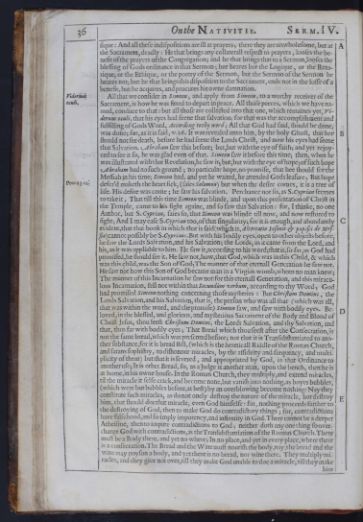 36
On the Nativitie.
Serm. IV.
sique: And all these indispositions are ill at prayers; there they are unwholesome, but at
36
On the Nativitie.
Serm. IV.
sique: And all these indispositions are ill at prayers; there they are unwholesome, but at
the Sacrament, deadly: He that brings any collaterall respect to prayers, looses the be-
nefit of the prayers of the Congregation; and he that brings that to a Sermon, looses the
blessing of Gods ordinance in that Sermon; hee heares but the Logique, or the Reto-
rique, or the Ethique, or the poetry of the Sermon, but the Sermon of the Sermon he
heares not; but he that brings this disposition to the Sacrament, ends not in the losse of a
benefit, but he acquires, and procures his owne damnation.
All that we consider in Simeon,Viderunt
oculi. and apply from Simeon, to a worthy receiver of the
Sacrament, is how he was fitted to depart in peace. All those peeces, which we have na-
med, conduce to that: but all those are collected into that one, which remaines yet, Vi-
derunt oculi, that his eyes had seene that salvation; for that was the accomplishment and
fulfilling of Gods Word, According to thy word; All that God had said, should be done,
was done; for, as it is said, v. 26. It was revealed unto him, by the holy Ghost, that hee
should not see death, before he had seene the Lords Christ, and now his eyes had seene
that Salvation. Abraham saw this before; but, but with the eye of faith; and yet rejoy-
ced to see it so, he was glad even of that. Simeon saw it before this time; then, when he
was illustrated with that Revelation, he saw it; but, but with the eye of hope; of such hope
Abraham had no such ground; no particular hope, no promise, that hee should see the
Messiah in his time; Simeon had, and yet he waited, he attended Gods leasure; But hope
defer'd maketh the heart sick, Prov. 13.12. (saies Solomon) but when the desire comes, it is a tree of
life. His desire was come; he saw his salvation. Perchance not so, as S. Cyprian seemes
to take it, That till this time Simeon was blinde, and upon this presentation of Christ in
the Temple, came to his sight againe, and so saw this Salvation: for, I thinke, no one
Author, but S. Cyprian, saies so, that Simeon was blinde till now, and now restored to
sight; And I may ease S. Cyprian too, of that singularity; for it is enough, and abundantly
evident, that that book in which that is said (which is, Altercatio Iasonis & papisci de Mes-
sia) cannot possibly be S. Cyprians. But with his bodily eyes, open to other objects before,
he saw the Lords Salvation, and his Salvation; the Lords, as it came from the Lord, and
his, as it was appliable to him. He saw it, according to his word; that is, so far, as God
had promised, he should see it. He saw not, how, that God, which was in this Child, & which
was this child, was the Son of God; The manner of that eternall Generation he saw not.
He saw not how this Son of God became man in a Virgins womb, whom no man knew;
The manner of this Incarnation he saw not: for this eternall Generation, and this miracu-
lous Incarnation, fell not within that Secundùm verbum, according to thy Word; God
had promised Simeon nothing concerning those mysteries: But Christum Domini, the
Lords Salvation, and his Salvation, that is, the person who was all that (which was all,
that was within the word, and the promise) Simeon saw, and saw with bodily eyes. Be-
loved, in the blessed, and glorious, and mysterious Sacrament of the Body and Blood of
Christ Jesus, thou seest Christum Domini, the Lords Salvation, and thy Salvation, and
that, thus far with bodily eyes; That Bread which thou seest after the Consecration, is
not the same bread, which was presented before; not that it is Transubstantiated to ano-
ther substance, for it is bread still, (which is the hereticall Riddle of the Roman Church,
and satans sophistry, to dishonour miracles, by the assiduity and frequency, and multi-
plicity of them) but that it is severed, and appropriated by God, in that Ordinance to
another use; It is other Bread, so, as a Judge is another man, upon the bench, then he is
at home, in his owne house. In the Roman Church, they multiply, and extend miracles,
til the miracle it selfe crack, and become none, but vanish into nothing, as boyes bubbles,
(which were but bubbles before, at best) by an overblowing become nothing: Nay they
constitute such miracles, as do not onely destroy the nature of the miracle, but destroy
him, that should doe that miracle, even God himselfe: for, nothing proceeds farther to
the destroying of God, then to make God do contradictory things; for, contradictions
have falsehood, and so imply impotency, and infirmity in God. There cannot be a deeper
Atheisme, then to impute contradictions to God; neither doth any one thing so over-
charge God with contradictions, as the Transubstantiation of the Roman Church. There
must be a Body there, and yet no where; In no place, and yet in every place, where there
is a consecration. The Bread and the Wine must nourish the body, nay, the bread and the
wine may poyson a body, and yet there is no bread, nor wine there. They multiply mi-
racles, and they give not over, till they make God unable to doe a miracle, till they make him
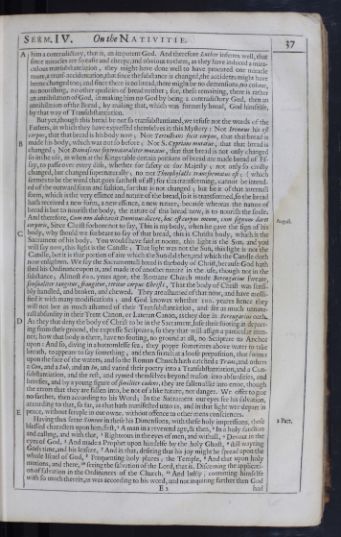 Serm. IV.
On the Nativitie.
37
him a contradictory, that is, an impotent God. And therefore Luther inferres well, that
Serm. IV.
On the Nativitie.
37
him a contradictory, that is, an impotent God. And therefore Luther inferres well, that
since miracles are so easie and cheape, and obvious to them, as they have induced a mira-
culous transubstantiation, they might have done well to have procured one miracle
more, a trans-accidentation, that since the substance is changed, the accidents might have
beene changed too; and since there is no bread, there might be no demensions, no colour,
no nourishing, no other qualities of bread neither; for, these remaining, there is rather
an annihilation of God, in making him no God by being a contradictory God, then an
annihilation of the Bread, by making that, which was formerly bread, God himselfe,
by that way of Transubstantiation.
But yet, though this bread be not so transubstantiated, we refuse not the words of the
Fathers, in which they have expressed themselves in this Mystery: Not Irenæus his est
corpus, that that bread is his body now; Not Tertullians fecit corpus, that that bread is
made his body, which was not so before; Not S. Cyprians mutatus, that that bread is
changed; Not Damascens supernaturaliter mutatus, that that bread is not only changed
so in the use, as when at the Kings table certain portions of bread are made bread of Es-
say, to passe over every dish, whether for safety or for Majesty; not only so civilly
changed, but changed supernaturally; no nor Theophylacts transformatus est; (which
seemes to be the word that goes farthest of all) for this transforming, cannot be intend-
ed of the outward form and fashion, for that is not changed; but be it of that internall
form, which is the very essence and nature of the bread, so it is transformed, so the bread
hath received a new form, a new essence, a new nature, because whereas the nature of
bread is but to nourish the body, the nature of this bread now is to nourish the soule.
And therefore, Cum non dubitavit Dominus dicere, hoc est corpus meum,August. cum signum daret
corporis, Since Christ forbore not to say, This is my body, when he gave the sign of his
body, why should we forbeare to say of that bread, this is Christs body, which is the
Sacrament of his body. You would have said at noone, this light is the Sun, and you
will say now, this light is the Candle; That light was not the Sun, this light is not the
Candle, but it is that portion of aire which the Sun did then, and which the Candle doth
now enlighten. We say the Sacramentall bread is the body of Christ, because God hath
shed his Ordinance upon it, and made it of another nature in the use, though not in the
substance; Almost 600. years agoe, the Romane Church made Berengarius sweare,
sensualiter tangitur, frangitur, teritur corpus Christs, That the body of Christ was sensi-
bly handled, and broken, and chewed. They are ashamed of that now, and have molli-
fied it with many modifications; and God knowes whether 100. yeares hence they
will not bee as much ashamed of their Transubstantiation, and see as much unnatu-
rall absurdity in their Trent Canon, or Lateran Canon, as they doe in Berengarius oath.
As they that deny the body of Christ to be in the Sacrament, lose their footing in depart-
ing from their ground, the expresse Scriptures; so they that will assign a particular man-
ner, how that body is there, have no footing, no ground at all, no Scripture to Anchor
upon: And so, diving in a bottomlesse sea, they poppe sometimes above water to take
breath, to appeare to say something, and then snatch at a loose preposition, that swims
upon the face of the waters; and so the Roman Church hath catched a Trans, and others
a Con, and a Sub, and an In, and varied their poetry into a Transubstantiation, and a Con-
substantiation, and the rest, and rymed themselves beyond reason, into absurdities, and
heresies, and by a young figure of similiter cadens, they are fallen alike into error, though
the errors that they are fallen into, be not of a like nature, nor danger. We offer to goe
no farther, then according to his Word; In the Sacrament our eyes see his salvation,
according to that, so far, as that hath manifested unto us, and in that light wee depart in
peace, without scruple in our owne, without offence to other mens consciences.
Having thus seene Simeon in these his Dimensions, with these holy impressions, 2 Part. these
blessed characters upon him; first, 1 A man in a reverend age, & then, 2 In a holy function
and calling, and with that, 3 Righteous in the eyes of men, and withall, 4 Devout in the
eyes of God, 5 And made a Prophet upon himselfe by the holy Ghost, 6 still wayting
Gods time, and his leasure, 7 And in that, desiring that his joy might be spread upon the
whole Israel of God, 8 Frequenting holy places, the Temple, 9 And that upon holy
motions, and there, 10 seeing the salvation of the Lord, that is, Discerning the applicati-
on of salvation in the Ordinances of the Church, 11 And lastly, contenting himselfe
with so much therein, as was according to his word, and not inquiring farther then God E2 had
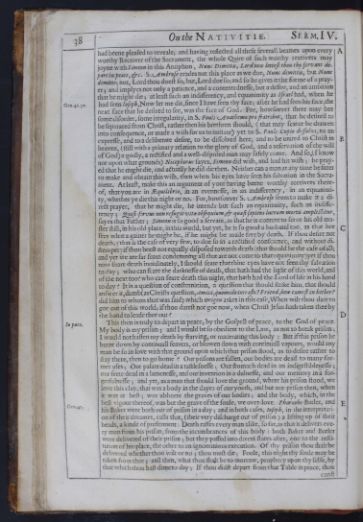 38
On the Nativitie.
Serm. IV.
had beene pleased to reveale; and having reflected all these severall beames upon every
38
On the Nativitie.
Serm. IV.
had beene pleased to reveale; and having reflected all these severall beames upon every
worthy Receiver of the Sacrament, the whole Quire of such worthy receivers may
joyne with Simeon in this Antiphon, Nunc Dimittis, Lord now lettest thou thy servant de-
part in peace, &c. S. Ambrose reades not this place as we doe, Nunc dimittis, but Nunc
dimitte; not, Lord thou doest so; but, Lord doe so; and so he gives it the forme of a pray-
er; and implyes not only a patience, and a contentednesse, but a desire, and an ambition
that he might die; at least such an indifferency, and equanimity as Israel had, when he
had seen Ioseph,Gen. 46.30. Now let me die, since I have seen thy face; after he had seen his face, the
next face that he desired to see, was the face of God. For, howsoever there may bee
some disorder, some irregularity, in S. Pauls Anathema pro fratribus, that he desired to
be separated from Christ, rather then his brethren should, (that may scarce be drawen
into consequence, or made a wish for us to imitate) yet to S. Pauls Cupio dissolvi, to an
expresse, and to a deliberate desire, to be dissolved here, and to be united to Christ in
heaven, (still with a primary relation to the glory of God, and a reservation of the will
of God) a godly, a rectified and a well-disposed man may safely come. And so, (I know
not upon what grounds) Nicephorus fayes, Simeon did wish, and had his wish; he pray-
ed that he might die, and actually he did die then. Neither can a man at any time be fitter
to make and obtain this wish, then when his eyes have seen his salvation in the Sacra-
ment. At least, make this an argument of your having beene worthy receivers there-
of, that you are in Æquilibrio, in an evennesse, in an indifferency, in an equanimi-
ty, whether ye die this night or no. For, howsoever S. Ambrose seem to make it a di-
rect prayer, that he might die, he intends but such an equanimity, such an indiffe-
rency; Quasi servus nonrefugit vitæ obsequium, & quasi sapiem lucrum mortis amplectitur,
sayes that Father; Simeon is so good a servant, as that he is content to serve his old ma-
ster still, in his old place, in this world, but yet, he is so good a husband too, as that hee
sees what a gainer he might be, if he might be made free by death. If thou desire not
death, (that is the case of very few, to doe so in a rectified conscience, and without di-
stemper) if thou beest not equally disposed towards death (that should be the case of all;
and yet we are far from condemning all that are not come to that equanimity) yet if thou
now feare death inordinately, I should feare that thine eyes have not seen thy salvation
to day; who can feare the darknesse of death, that hath had the light of this world, and
of the next too? who can feare death this night, that hath had the Lord of life in his hand
to day? It is a question of consternation, a question that should strike him, that should
answer it, dumb (as Christs question, Amice, quomodo intrasti? Friend, how camest in hither?
did him to whom that was said) which Origen askes in this case, When wilt thou dare to
goe out of this world, if thou darest not goe now, when Christ Jesus hath taken thee by
the hand to leade thee out?
This then is truly to depart in peace, In pace. by the Gospell of peace, to the God of peace.
My body is my prison; and I would be so obedient to the Law, as not to break prison;
I would not hasten my death by starving, or macerating this body: But if this prison be
burnt down by continuall feavers, or blowen down with continuall vapours, would any
man be so in love with that ground upon which that prison stood, as to desire rather to
stay there, then to go home? Our prisons are fallen, our bodies are dead to many for-
mer uses; Our palate dead in a tastlesnesse; Our stomach dead in an indigestiblenesse;
our feete dead in a lamenesse, and our invention in a dulnesse, and our memory in a for-
getfulnesse; and yet, as a man that should love the ground, where his prison stood, we
love this clay, that was a body in the dayes of our youth, and but our prison then, when
it was at best; wee abhorre the graves of our bodies; and the body, which, in the
best vigour thereof, Gen. 40. was but the grave of the soule, we over-love. Pharaohs Butler, and
his Baker went both out of prison in a day; and in both cases, Ioseph, in the interpretati-
on of their dreames, calls that, (their very discharge out of prison) a lifting up of their
heads, a kinde of preferment: Death raises every man alike, so far, as that it delivers eve-
ry man from his prison, from the incumbrances of this body: both Baker and Butler
were delivered of their prison; but they passed into divers states after, one to the resti-
tution of his place, the other to an ignominious execution. Of thy prison thou shalt be
delivered whether thou wilt or no; thou must die; Foole, this night thy soule may be
taken from thee; and then, what thou shalt be to morrow, prophecy upon thy selfe, by
that which thou hast done to day; If thou didst depart from that Table in peace, thou canst
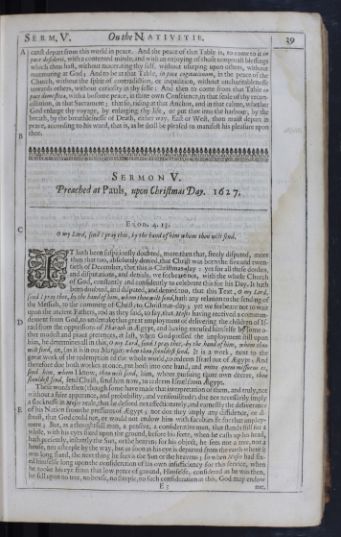 Serm. IV.
On the Nativitie.
39
canst depart from this world in peace. And the peace of that Table is, to come to it in
Serm. IV.
On the Nativitie.
39
canst depart from this world in peace. And the peace of that Table is, to come to it in
pace desiderii, with a contented minde, and with an enjoying of those temporall blessings
which thou hast, without macerating thy self, without usurping upon others, without
murmuring at God; And to be at that Table, in pace cogitationum, in the peace of the
Church, without the spirit of contradiction, or inquisition, without uncharitablenesse
towards others, without curiosity in thy selfe: And then to come from that Table in
pace domestica, with a bosome peace, in thine own Conscience, in that seale of thy recon-
ciliation, in that Sacrament; that so, riding at that Anchor, and in that calme whether
God enlarge thy voyage, by enlarging thy life, or put thee into the harbour, by the
breath, by the breathlesnesse of Death, either way, East or West, thou maist depart in
peace, according to his word, that is, as he shall be pleased to manifest his pleasure upon
thee.
Sermon V.
Preached at Pauls, upon Christmas Day. 1627.
Exod. 4.13.
O my Lord, send I pray thee, by the hand of him whom thou wilt send.
ITIt hath been suspitiously doubted, more then that, freely disputed, more
then that too, absolutely denied, that Christ was born the five and twen-
tieth of December, that this is Christmas-day: yet for all these doubts,
and disputations, and denials, we forbeare not, with the whole Church
of God, constantly and confidently to celebrate this for his Day. It hath
been doubted, and disputed, and denied too, that this Text, O my Lord,
send I pray thee, by the hand of him, whom thou wilt send, hath any relation to the sending of
the Messiah, to the comming of Christ, to Christmas-day; yet we forbeare not to wait
upon the ancient Fathers, and as they said, to say, that Moses having received a comman-
dement from God, to undertake that great employment of delivering the children of Is-
rael from the oppressions of Pharaoh in Ægypt, and having excused himselfe by some o-
ther modest and pious pretences, at last, when God pressed the imployment still upon
him, he determines all in this, O my Lord, send I pray thee, by the hand of him, whom thou
wilt send, or, (as it is in our Margin) when thou shouldest send. It is a work, next to the
great work of the redemption of the whole world, to redeem Israel out of Ægypt; And
therefore doe both workes at once, put both into one hand, and mitte quem missurus es,
send him, whom I know, thou wilt send, him, whom pursuing thine own decree, thou
shouldest send, send Christ, send him now, to redeem Israel from Ægypt.
These words then (though some have made that interpretation of them, and truly, not
without a faire apparance, and probability, and verisimilitude) doe not necessarily imply
a slacknesse in Moses zeale, that he desired not affectionately, and earnestly the deliverance
of his Nation from the pressures of Ægypt; nor doe they imply any diffidence, or di-
strust, that God could not, or would not endow him with faculties fit for that imploy-
ment; But, as a thoughtfull man, a pensive, a considerative man, that stands still for a
while, with his eyes fixed upon the ground, before his feete, when he casts up his head,
hath presently, instantly the Sun, or the heavens for his object, he sees not a tree, nor a
house, nor a steeple by the way, but as soon as his eye is departed from the earth where it
was long fixed, the next thing he sees is the Sun or the heavens; so when Moses had fix-
ed himselfe long upon the consideration of his own insufficiency for this service, when
he tooke his eye from that low peece of ground, Himselfe, considered as he was then,
he fell upon no tree, no house, no steeple, no such consideration as this, God may endow E3 me,
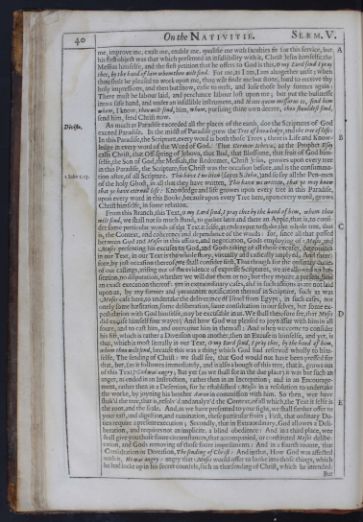 40
On the Nativitie.
Serm. V.
me, improve me, exalt me, enable me, qualifie me with faculties fit for this service, but
40
On the Nativitie.
Serm. V.
me, improve me, exalt me, enable me, qualifie me with faculties fit for this service, but
his first object was that which presented an infallibility with it, Christ Jesus himselfe, the
Messias himselfe, and the first petition that he offers to God is this, O my Lord send I pray
thee, by the hand of him whom thou wilt send. For me, as I am, I am altogether unfit; when
thou shalt be pleased to work upon me, thou wilt finde me but stone, hard to receive thy
holy impressions, and then but snow, easie to melt, and lose those holy formes again:
There must be labour laid, and perchance labour lost upon me; but put the businesse
into a safe had, and under an infallible instrument, and Mitte quem missurus es, send him
whom, I know, thou wilt send, him, whom, pursuing thine own decree, thou shouldest send,
send him, send Christ now.
As much as Paradise exceeded all the places of the earth, Divisio. doe the Scriptures of God
exceed Paradise. In the midst of Paradise grew the Tree of knowledge, and the tree of life:
In this Paradise, the Scripture, every word is both those Trees; there is Life and Know-
ledge in every word of the Word of God. That Germen Iehovæ, as the Prophet Esay
calls Christ, that Off-spring of Jehova, that Bud, that Blossome, that fruit of God him-
selfe, the Son of God, the Messiah, the Redeemer, Christ Jesus, growes upon every tree
in this Paradise, the Scripture; for Christ was the occasion before, and is the consumma-
tion after, 1 Iohn 5.13. of all Scripture. This have I written (sayes S. Iohn,) and so say all the Pen-men
of the holy Ghost, in all that they have written, This have we written, that ye may know
that ye have eternall life: Knowledge and life growes upon every tree in this Paradise,
upon every word in this Booke, because upon every Tree here, upon every word, grows
Christ himselfe, in some relation.
From this Branch, this Text, O my Lord send, I pray thee by the hand of him, whom thou
wilt send, we shall not so much stand, to gather here and there an Apple, that is, to consi-
der some particular words of the Text it selfe, as endeavour to shake the whole tree, that
is, the Context, and coherence and dependance of the words: for, since all that passed
between God and Moses in this affaire, and negotiation, Gods employing of Moses, and
Moses presenting his excuses to God, and Gods taking of all those excuses, determines
in our Text, in our Text is the whole story, virtually and radically implyed; And there-
fore, by just occasion thereof, we shall consider first, That though for the ordinary duties
of our callings, arising out of the evidence of expresse Scriptures, we are allowed no hæ-
sitation, no disputation, whether we will doe them or no; but they require a present, and
an exact execution thereof: yet in extraordinary cases, and in such actions as are not laid
upon us, by any former and permanent notification thereof in Scripture, such as was
Moses case here, to undertake the deliverance of Israel from Egypt; in such cases, not
onely some hæsitation, some deliberation, some consultation in our selves, but some ex-
postulation with God himselfe, may be excusable in us. We shall therefore see, that Moses
did excuse himself four wayes; And how God was pleased to joyn issue with him in all
foure, and to cast him, and overcome him in them all: And when we come to consider
his fift, which is rather a Diversion upon another, then an Excuse in himselfe, and yet, is
that, which is most literally in our Text, O my Lord send, I pray thee, by the hand of him,
whom thou wilt send, because this was a thing which God had reserved wholly to him-
selfe, The sending of Christ: we shall see, that God would not have been pressed for
that, but, (as it followes immediately, and is also a bough of this tree, that is, grows out
of this Text) God was angry; But yet (as we shall see in the due place) it was but such an
anger, as ended in an Instruction, rather then in an Increpation; and in an Encourage-
ment, rather then in a Desertion, for he established Moses in a resolution to undertake
the worke, by joyning his brother Aaron in commission with him. So then, wee have
shak'd the tree, that is, resolv'd and analyz'd the Context, of all which, the Text it selfe is
the root, and the seale. And, as we have presented to your sight, we shall farther offer to
your tast, and digestion, and rumination, these particular fruits; First, that ordinary Du-
ties require a present execution; Secondly, that in Extraordinary, God allowes a Deli-
beration, and requires not an implicite, a blind obedience: And in a third place, wee
shall give you those foure circumstances, that accompanied, or constituted Moses delibe-
ration, and Gods removing of those foure impediments: And in a fourth roome,
that Consultation or Diversion, The sending of Christ: And in that, How God was affected
with it, He was angry: angry that Moses would offer to looke into those things, which
he had lockt up in his secret counsels, such as that sending of Christ, which he intended: But
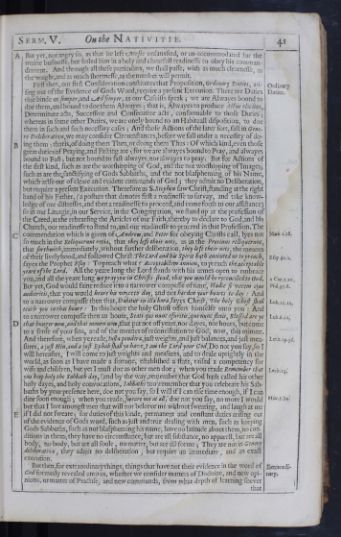 41
On the Nativitie.
Serm. V.
But yet, not angry so, as that he left Moses unsatisfied, or un-accommodated for the
41
On the Nativitie.
Serm. V.
But yet, not angry so, as that he left Moses unsatisfied, or un-accommodated for the
maine businesse, but setled him in a holy and chearfull readinesse to obey his comman-
dement. And through all these particulars, we shall passe, with as much clearnesse, as
the waight, and as much shortnesse, as the number will permit.
First then, our first Consideration constitutes that Proposition, Ordinary Duties, Ordinary
Duties. ari-
sing out of the Evidence of Gods Word, require a present Execution. There are Duties
that binde us semper, and Ad semper, as our Casuists speak; we are Alwayes bound to
doe them, and bound to doe them Alwayes; that is, Alwayes to produce Actus elicitos,
Determinate acts, Successive and Consecutive acts, conformable to those Duties;
whereas in some other Duties, we are onely bound to an Habituall disposition, to doe
them in such and such necessary cases; And those Actions of the later sort, fall in Gene-
re Deliberativo, we may consider Circumstances, before we fall under a necessity of do-
ing them; that is, of doing them Then, or doing them Thus: Of which kind, even those
great duties of Praying, and Fasting are; for we are alwayes bound to Pray, and alwayes
bound to Fast; but not bound to fast alwayes, nor alwayes to pray. But for Actions of
the first kind, such as are the worshipping of God, and the not worshipping of Images;
such as are the sanctifying of Gods Sabbaths, and the not blaspheming of his Name,
which arise out of cleare and evident commands of God; they admit no Deliberation,
but require a present Execution. Therefore as S. Stephen saw Christ, standing at the right
hand of his Father, (a posture that denotes first a readinesse to survay, and take know-
ledge of our distresses, and then a readinesse to proceed, and come forth to our assistance)
so in our Liturgie, in our Service, in the Congregation, we stand up at the profession of
the Creed, at the rehearsing the Articles of our Faith, thereby to declare to God, and his
Church, our readinesse to stand to, and our readinesse to proceed in that Profession. The
commendation which is given of Andrew, and Peter for obeying Christs call, Mark 1.18. lyes not
so much in the Reliquerunt retia, that they left their nets, as in the Protinus reliquerunt,
that forthwith, immediately, without farther deliberation, they left their nets, the meanes
of their livelyhood, and followed Christ. The Lord and his Spirit hath anointed us to preach, Esay 61.1.
sayes the Prophet Esay: To preach what? Acceptabilem annum, to preach the acceptable
yeare of the Lord. All the yeare long the Lord stands with his armes open to embrace
you, and all the yeare long we pray you in Christs stead, that you would be reconciled to God.2 Cor. 5.20.
Psal. 95.8.
But yet, God would faine reduce it to a narrower compasse of time, Hodie si vocem ejus
audieritis, that you would heare his voyce to day, and not harden your hearts to day: And
to a narrower compasse then that, Dabitur in illa hora, sayes Christ, Luk. 12.12. The holy Ghost shall
teach you in that houre: In this houre the holy Ghost offers himselfe unto you: And
to a narrower compasse then an houre, Beati qui nunc esuritis, qui nunc fletis, Luk. 6.21. Blessed are ye
that hunger now, and that mourn now, that put not off years, nor dayes, nor hours, but come
to a sense of your sins, and of the meanes of reconciliation to God, now, this minute.
And therefore, when ye reade, Iusta pondera, just weights, and Just balances, Levit. 19.36. and just mea-
sures, a just Hin, and a just Ephah shall ye have, I am the Lord your God, Do not you say, so I
will hereafter, I will come to just weights and measures, and to deale uprightly in the
world, as soon as I have made a fortune, established a state, raised a competency for
wife and children, but yet I must doe as other men doe;Levit. 23. when you reade Remember that
you keep holy the Sabbath day, (and by the way, remember that God hath called his other
holy dayes, and holy convocations, Sabbaths too) remember that you celebrate his Sab-
baths by your presence here, doe not you say, so I will if I can rise time enough, if I can
dine soon enough; when you reade, sweare not at all, doe not you say, Matt. 5.34. no more I would
but that I live amongst men that will not beleeve me without swearing, and laugh at me
if I did not sweare; for duties of this kinde, permanent and constant duties arising out
of the evidence of Gods word, such as just and true dealing with men, such as keeping
Gods Sabbaths, such as not blaspheming his name, have no latitude about them, no con-
ditions in them; they have no circumstance, but are all substance, no apparell, but are all
body, no body, but are all soule, no matter, but are all forme; They are not in Genere
deliberativo, they admit no deliberation, but require an immediate, and an exact
execution.
But then, for extraordinary things, things that have not their evidence in the word of Extraordi-
nary.
God formerly revealed unto us, whether we consider matters of Doctrine, and new opi-
nions, or matter of Practise, and new commands, from what depth of learning soever that
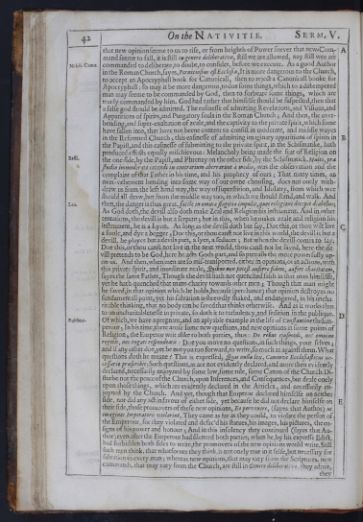 42
On the Nativitie.
Serm. V.
that new opinion seeme to us to rise, or from heighth of Power soever that new-Com-
42
On the Nativitie.
Serm. V.
that new opinion seeme to us to rise, or from heighth of Power soever that new-Com-mand seeme to fall, it is still in genere deliberativo, still we are allowed, nay still wee are
commanded to deliberate, Melch. Canus. to doubt, to consider, before we execute. As a good Author
in the Roman Church, sayes, Perniciosius est Ecclesiæ, It is more dangerous to the Church,
to accept an Apocryphall book for Canonicall, then to reject a Canonicall booke for
Apocryphall: so may it be more dangerous, to doe some things, which to a distempered
man may seeme to be commanded by God, then to forbeare some things, which are
truely commanded by him. God had rather that himselfe should be suspected, then that
a false god should be admitted. The easinesse of admitting Revelations, and Visions, and
Apparitions of spirits, and Purgatory souls in the Roman Church; And then, the over-
bending, and super-exaltation of zeale, and the captivity to the private spirit, which some
have fallen into, that have not beene content to consist in moderate, and middle wayes
in the Reformed Church; this easinesse of admitting imaginary apparitions of spirits in
the Papist, and this easinesse of submitting to the private spirit, in the Schismatike, hath
produced effects equally mischievous: Melancholy being made the seat of Religion on
the one side, Basil. by the Papist, and Phrenzy on the other side, by the Schismatick. Multi, præ
studio immoderato intendi in contrarium aberrarunt à medio, was the observation and the
complaint of that Father in his time, and his prophecy of ours; That many times, an
over-vehement bending into some way of our owne choosing, does not onely with-
draw us from the left hand way, the way of superstition, and Idolatry, from which wee
should all draw, but from the middle way too, in which we should stand, and walk. And
then, Leo. the danger is thus great, facile in omnia flagitia impulit, quos religione decepit diabolus;
As God doth, the devill also doth make Zeal and Religion his instrument. And in other
tentations, the devill is but a serpent; but in this, when he makes zeale and religion his
instrument, he is a Lyon. As long as the devill doth but say, Doe this, or thou wilt live
a foole, and dye a begger; Doe this, or thou canst not live in this world, the devill is but a
devill, he playes but a devils part, a lyer, a seducer; But when the devill comes to say,
Doe this, or thou canst not live in the next world, thou canst not be saved, here the de-
vill pretends to be God, here he acts Gods part, and so prevails the more powerfully up-
on us. And then, when men are so mis-transported, either in opinions, or in actions, with
this private spirit, and inordinate zeale, Quibus non potest auferre fidem, aufert charitatem,
sayes the same Father, Though the devill hath not quenched faith in that man himselfe,
yet he hath quenched that mans charity towards other men; Though that man might
be saved, in that opinion which he holds, because (perchance) that opinion destroyes no
fundamentall point, yet his salvation is shrewdly shaked, and endangered, in his uncha-
ritable thinking, that no body can be saved that thinks otherwise. And as it works thus
to an uncharitablenesse in private, so doth it to turbulency, and sedition in the publique.
Of which, Eusebius. we have a pregnant, and an aplyable example in the life of Constantine the Em-
perour; In his time, there arose some new questions, and new opinions in some points of
Religion; the Emperor writ alike to both parties, thus: De rebus ejusmodi, nec omnino
rogetis, nec rogati respondeatis: Doe you move no questions, in such things, your selves;
and if any other doe, yet be not you too forward, to write, so much as against them. What
questions doth he meane? That is expressed, Quas nulla lex, Canonve Ecclesiasticus ne-
cessario præscribit; Such questions, as are not evidently declared, and more then evidently
declared, necessarily enjoyned by some law, some rule, some Canon of the Church: Di-
sturbe not the peace of the Church, upon Inferences, and Consequences, but deale onely
upon those things, which are evidently declared in the Articles, and necessarily en-
joyned by the Church. And yet, though that Emperor declared himselfe on neither
side, nor did any act in favour of either side, yet because he did not declare himselfe on
their side, those promovers of these new opinions, Eo pervenere, (sayes that Author) ut
imagines Imperatoris violarint, They came as far as they could, to violate the person of
the Emperour, for they violated and defac'd his statues, his images, his pictures, the en-
signs of his power and honour; And in this insolency they continued (sayes that Au-
thor) even after the Emperour had silenced both parties; when he, by his expresse Edict,
had forbidden both sides to write, the promovers of the new opinions would write. Still
such men think, that whatsoeuer they think, is not onely true in it selfe, but necessary for
salvation to every man; whereas new opinions, that may vary from the Scriptures; new
commands, that may vary from the Church, are still in Genere deliberativo, they admit, they
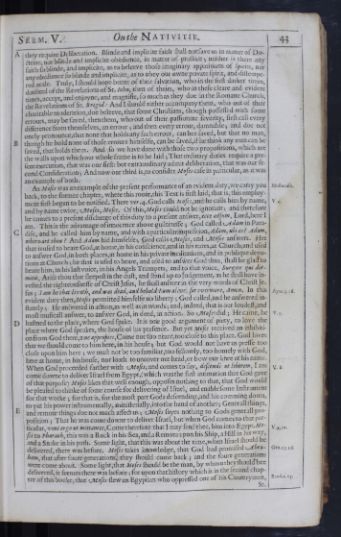 43
On the Nativitie.
Serm. V.they require Deliberation. Blinde and implicite faith shall not save us in matter of Do-
43
On the Nativitie.
Serm. V.they require Deliberation. Blinde and implicite faith shall not save us in matter of Do-ctrine, nor blinde and implicite obedience, in matter of practice; neither is there any
faith so blinde, and implicite, as to beleeve those imaginary apparitions of spirits, nor
any obedience so blinde and implicite, as to obey our owne private spirit, and distempe-
red zeale. Truly, I should hope better of their salvation, who in the first darker times,
doubted of the Revelations of St. Iohn, then of theirs, who in these cleare and evident
times, accept, and enjoyne, and magnifie, so much as they doe in the Romane Church,
the Revelations of St. Brigid: And I should rather accompany them, who out of their
charitable moderation, doe beleeve, that some Christians, though possessed with some
errours, may be saved, then them, who out of their passionate severity, first call every
difference from themselves, an errour; and then every errour, damnable; and doe not
onely pronounce, that none that holds any such errour, can bee saved, but that no man,
though he hold none of those errours himselfe, can be saved, if he think any man can be
saved, that holds them. And so we have done with those two propofitions, which are
the walls upon which our whole frame is to be laid; That ordinary duties require a pre-
sent execution, that was our first: but extraordinary admit deliberation, that was our se-
cond Consideration; And now our third is, to confider Moses case in particular, as it was
an example of both.
As Moses was an example of the present performance of an evident duty, Moses case. we carry you
back, to the former chapter, where this roote, this Text is first laid, that is, this employ-
ment first begun to be notified. There ver. 4. God calls Moses, and he calls him by name, V. 4.
and by name twice, Moses, Moses. Of this, Moses could not be ignorant; and therefore
he comes to a present discharge of this duty to a present answer, ecce ad sum, Lord, here I
am. This is the advantage of innocence above guiltinesse; God called Adam in Para-
dise, and he called him by name, and with a particular inquisition, Adam, ubi es? Adam,
where art thou? And Adam hid himselfe; God calls Moses, and Moses answers. Hee
that is used to heare God, at home, in his conscience, and in his eares, at Church; and used
to answer God, in both places, at home in his private meditations, and in publique devo-
tions at Church; he that is used to heare, and used to answer God thus, shall be glad to
heare him, in his last voice, in his Angels Trumpets, and to that voice, Surgite qui dor-
mitis, Arise thou that sleepest in the dust, and stand up to Judgement, as he shall have in-
vested the righteousnesse of Christ Jesus, he shall answer in the very words of Christ Je-
sus; I am he that liveth, and was dead, and behold I am alive, for evermore, Amen.Apoc. 1.18. In this
evident duty then, Moses permitted himselfe no liberty; God called, and he answered in-
stantly; He answered in action, as well as in words; and, indeed, that is our loudest, and
most musicall answer, to answer God, in deed, in action. So Moses did; He came, V. 5. he
hastned to the place, where God spake. It is one good argument of piety, to love the
place where God speakes, the house of his presence. But yet Moses received an inhibiti-
on from God there, a ne appropies, Come not too neare, too close to this place. God loves
that we should come to him here, in his house; but God would not have us presse too
close upon him here; we must not be too familiar, too fellowly, too homely with God,
here at home, in his house, nor loath to uncover our head, or bow our knee at his name.
When God proceeded farther with Moses, and comes to say, descendi ut liberem,V. 8. I am
come downe to deliver Israel from Egypt, (which was the first intimation that God gave
of that purpose) Moses likes that well enough, opposes nothing to that, that God would
be pleased to thinke of some course for delivering of Israel, and enable some Instrument
for that worke; for that is, for the most part Gods descending, and his comming down,
to put his power instrumentally, ministerially, into the hand of another; Generall things,
and remote things doe not much affect us; Moses sayes nothing to Gods generall pro-
position; That he was come downe to deliver Israel, but when God comes to that par-
ticular, veni ergo ut mittam te, Come therefore that I may send thee, him into Egypt, V. 9, 10. Mo-
ses to Pharaoh, this was a Rock in his Sea, and a Remora upon his Ship, a Hill in his way,
and a Snake in his path. Some light, that this was about the time, when Israel should be
delivered, there was before. Moses takes knowledge, Gen. 15.16. that God had promised Abra-
ham, that after foure generations, they should come back; and the foure generations
were come about. Some light, that Moses should be the man, by whom they should bee
delivered, it seemes there was before; for upon that history which is in the second chap-
ter of this booke, that Moses flew an Egyptian who oppressed one of his Countrymen, Exod. 2.13. St.
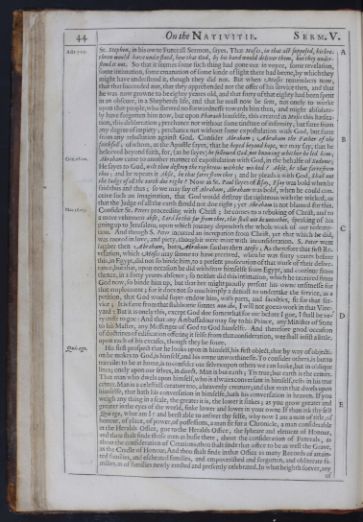 44On the Nativitie.
Serm. V.St. Stephen,Acts 7.25. in his owne Funerall Sermon, sayes, That Moses, in that act supposed, his bre-
44On the Nativitie.
Serm. V.St. Stephen,Acts 7.25. in his owne Funerall Sermon, sayes, That Moses, in that act supposed, his bre-thren would have understood, how that God, by his hand would deliver them, but they under-
stood it not. So that it seemes some such thing had gone out in voyce, some revelation,
some intimation, some emanation of some kinde of light there had beene, by which they
might have understood it, though they did not. But when Moses remembers now,
that that succeeded not, that they apprehended not the offer of his service then, and that
he was now growne to be eighty yeares old, and that forty of that eighty had been spent
in an obscure, in a Shepherds life, and that he must now be sent, not onely to worke
upon that people, who shewed no forwardnesse towards him then, and might absolute-
ly have forgotten him now, but upon Pharaoh himselfe, this created in Moses this hæsita-
tion, this deliberation; perchance not without some tincture of infirmity, but farre from
any degree of impiety; perchance not without some expostulation with God, but farre
from any reluctation against God. Consider Abraham; Abraham the Father of the
faithfull; of whom, as the Apostle sayes, that he hoped beyond hope, we may say, that he
beleeved beyond faith, for, (as he sayes) he followed God, not knowing whither he led him;
Abraham came to another manner of expostulation with God, Gen. 18.22. in the behalfe of Sodome;
He sayes to God, wilt thou destroy the righteous with the wicked? Absit, be that farre from
thee; and he repeats it Absit, be that farre from thee; and he pleads it with God, Shall not
the Iudge of all the earth doe right? Now as St. Paul sayes of Esay, Esay was bold when he
said thus and thus; so we may say of Abraham, Abraham was bold, when he could con-
ceive such an imagination, that God would destroy the righteous with the wicked, or
that the Judge of all the earth should not doe right; yet Abraham is not blamed for this.
Consider St. Peters proceeding with Christ;Mat. 16.23. he comes to a rebuking of Christ, and to
a more vehement absit, Lord be this far from thee, this shall not be unto thee, speaking of his
going up to Jerusalem, upon which journey dependeth the whole work of our redemp-
tion. And though S. Peter incurred an increpation from Christ, yet that which he did,
was rooted in love, and piety, though it were mixt with inconsideration. S. Peter went
farther then Abraham, but Abraham farthen then Moses; As therefore that first Re-
velation, which Moses may seeme to have received, when he was forty yeares before
this, in Egypt, did not so binde him, to a present prosecution of that work of their delive-
rance, but that, upon occasion he did withdraw himselfe from Egypt, and continue from
thence, in a forty yeares absence; so neither did this intimation, which he received from
God now, so binde him up, but that hee might piously present his owne unfitnesse for
that emploiment; for it does not so much imply a deniall to undertake the service, as a
petition, that God would super-endow him, with parts, and faculties, fit for that ser-
vice; It is farre from that stubborne sonnes non ibo, I will not goe to work in that Vine-
yard; But it is onely this, except God doe somewhat for me before I goe, I shall be ve-
ry unfit to goe: And that any Ambassadour may say to his Prince, any Minister of State
to his Master, any Messenger of God to God himselfe. And therefore good occasion
of doctrines of edification offering it selfe from that consideration, wee shall insist a little,
upon each of his excuses, though they be foure.
His first prospect that he looks upon in himself, Quis ego. his first object, that by way of objecti-
on he makes to God, is himself, and his owne unworthinesse. To consider others, is but to
travaile: to be at home, is to consider our selves: upon others we can looke, but in oblique
lines; onely upon our selves, in direct. Man is but earth; Tis true; but earth is the center.
That man who dwels upon himself, who is alwaies conversant in himself, rests in his true
center. Man is a celestiall creature too, a heavenly creature; and that man that dwels upon
himselfe, that hath his conversation in himselfe, hath his conversation in heaven. If you
weigh any thing in a scale, the greater it is, the lower it sinkes; as you grow greater and
greater in the eyes of the world, sinke lower and lower in your owne. If thou ask thy self
Quis ego, what am I? and beest able to answer thy selfe, why now I am a man of title, of
honour, of place, of power, of possessions, a man fit for a Chronicle, a man considerable
in the Heralds Office, goe to the Heralds Office, the spheare and element of Honour,
and thou shalt finde those men as busie there, about the consideration of Funerals, as
about the consideration of Creations; thou shalt finde that office to be as well the Grave,
as the Cradle of Honour; And thou shalt finde in that Office as many Records of attain-
ted families, and escheated families, and empoverished and forgotten, and obliterate fa-
milies, as of families newly erected and presently celebrated. In what heighth soever, any of
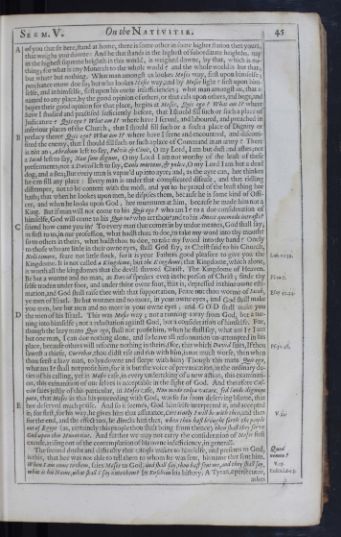 45On the Nativitie.
Serm. V.of you that sit here, stand at home, there is some other in some higher station then yours,
45On the Nativitie.
Serm. V.of you that sit here, stand at home, there is some other in some higher station then yours,
that weighs you downe: And he that stands in the highest of subordinate heighths, nay
in the highest supreme heighth in this world, is weighed downe, by that, which is no-
thing; for what is any Monarch to the whole world? and the whole world is but that;
but what? but nothing. What man amongst us lookes Moses way, first upon himselfe;
perchance enow doe so; but who lookes Moses way, and by Moses light? first upon him-
selfe, and in himselfe, first upon his owne insufficiencies; what man amongst us, that is
named to any place, by the good opinion of others, or that cals upon others, and begs, and
buyes their good opinion for that place, begins at Moses, Quis ego? What am I? where
have I studied and practised sufficiently before, that I should fill such or such a place of
Judicature? Quis ego? What am I? where have I served, and laboured, and preached in
inferiour places of the Church, that I should fill fuch or a such a place of Dignity or
prelacy there? Quis ego? What am I? where have I seene and encountred, and discom-
fited the enemy, that I should fill such or such a place of Command in an army? There
is not an Abraham left to say, Pulvis & Cinis, O my Lord, I am but dust and ashes; not
a Iacob left to say, Non sum dignus, O my Lord I am not worthy of the least of these
preferments; not a David left to say, Canis mortuies, & pulex, O my Lord I am but a dead
dog, and a flea; But every man is vapor'd up into ayre; and, as the ayre can, hee thinkes
he can fill any place: Every man is under that complicated disease, and that ridling
distemper, not to be content with the most, and yet to be proud of the least thing hee
hath; that when he lookes upon men, he dispises them, because he is some kind of Offi-
cer, and when he looks upon God, hee murmures at him, because he made him not a
King. But if man will not come to his Quis ego? who am I? to a due consideration of
himselfe, God will come to his Quis tu? who art thou? and to his Amice quomodo intrasti?
friend how came you in? To every man that comes in by undue meanes, God shall say,
as first to us, in our profession, what hadst thou to doe, to take my word into thy mouth?
so to others in theirs, what hadst thou to doe, to take my sword into thy hand? Onely
to those who are little in their owne eyes, shall God say, as Christ said to his Church,
Noli timere, feare not little flock, for it is your Fathers good pleasure to give you the Luk. 12.32.
Kingdome. It is not called a Kingdome, but the Kingdome; that Kingdome, which alone,
is worth all the kingdomes that the devill shewed Christ, The Kingdome of Heaven.
Be but a worme and no man, as David speakes even in the person of Christ;Ps. 22.7. finde thy
selfe troden under foot, and under thine owne foot, that is, depressed in thine owne esti-
mation, and God shall raise thee with that supportation, Feare not thou worme of Iacob,Esay 41.14.
ye men of Israel. Be but wormes and no more, in your owne eyes, and God shall make
you men, bee but men and no more in your owne eyes, and GOD shall make you
the men of his Israel. This was Moses way; not a running away from God, but a tur-
ning into himselfe; not a reluctation against God, but a consideration of himselfe. For,
though the lazy mans Quis ego, shall not profit him, when he shall say, what am I? I am
but one man, I can doe nothing alone, and so leave all reformation un-attempted in his
place, because others will reforme nothing in theirs, (for, that which David saies, Ps. 50.18. If thou
sawest a thiefe, Currebas, thou didst rise and run with him, is not much worse, then when
thou seest a lazy man, to lye downe and sleepe with him) Though this mans Quis ego,
what am I? shall not profit him, for it is but the voice of prevarication, in the ordinary du-
ties of his calling, yet in Moses case, in every undertaking of a new action, this examinati-
on, this exinanition of our selves is acceptable in the fight of God. And therefore Cal-
vin saies justly of this particular, in Moses case, Non modo culpa vacare, sed laude dignum
puto, that Moses in this his proceeding with God, was so far from deserving blame, that
hee deserved much praise. And so it seemes, God himselfe interpreted it, and accepted
it; for first, for his way, he gives him that assurance, Certainely I will be with thee;V. 12. and then
for the end, and the effect too, he directs him thus, when thou hast brought forth the people
out of Egypt (as, certainely this people thou shalt bring from thence) then shall they serve
God upon this Mountaine. And further we may not carry the consideration of Moses first
excuse, arising out of the contemplation of his owne insufficiency, in generall.
The second doubt and difficulty that Moses makes to himselfe, and presents to God, Quod
nomen?
is this, that hee was not able to tell them to whom he was sent, his name that sent him.
When I am come to them, saies Moses to God, and shall say, thou hast sent me, and they shall say, V. 13.
what is his Name, what shall I say unto them? In Eusebius his history, A Tyran, a persecutor, Euseb. l. 6. c. 3. askes
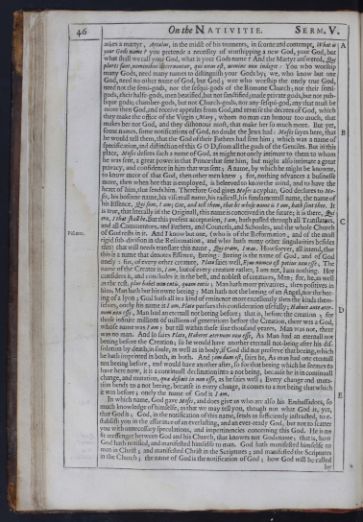 46On the Nativitie.
Serm. V.askes a martyr, Artalus, in the midst of his torments, in scorne and contempt, What is
46On the Nativitie.
Serm. V.askes a martyr, Artalus, in the midst of his torments, in scorne and contempt, What is
your Gods name? you pretende a necessity of worshipping a new God, your God, but
what shall we call your God, what is your Gods name? And the Martyr answered, Qui
plures sunt, nominibus decernuntur, qui unus est, nomine non indiget: You who worship
many Gods, need many names to distinguish your Gods by; we, who know but one
God, need no other name of God, but God; wee who worship the onely true God,
need not the semi-gods, nor the sesqui-gods of the Romane Church; not their semi-
gods, their halfe-gods, men beatified, but not sanctified; made private gods, but not pub-
lique gods; chamber-gods, but not Church-gods; nor any sesqui-god, any that must be
more then God, and receive appeales from God, and reverse the decrees of God, which
they make the office of the Virgin Mary, whom no man can honour too much, that
makes her not God, and they dishonour most, that make her so much more. But yet,
some names, some notifications of God, no doubt the Jews had: Moses sayes here, that
he would tell them, that the God of their Fathers had sent him; which was a name of
specification, and distinction of this GOD, from all the gods of the Gentiles. But in this
place, Moses desires such a name of God, as might not onely intimate to them to whom
he was sent, a great power in that Prince that sent him, but might also intimate a great
privacy, and confidence in him that was sent; A name, by which he might be knowne,
to know more of that God, then other men knew; for, nothing advances a businesse
more, then when hee that is employed, is beleeved to know the mind, and to have the
heart of him, that sends him. Therefore God gives Moses a cyphar; God declares to Mo-
ses, his bosome name, his viscerall name, his radicall, his fundamentall name, the name of
his Essence, Qui sum, I am; Goe, and tell them, that he whose name is I am, hath sent thee. It
is true, that literally in the Originall, this name is conceived in the future; it is there, Qui
ero, I that shall be. But this present acceptation, I am, hath passed through all Translators,
and all Commentors, and Fathers, and Councels, and Schooles, and the whole Church
of God rests in it.Piscator. And I know but one, (who is of the Reformation, and of the most
rigid sub-division in the Reformation, and who hath many other singularities besides
this) that will needs translate this name, Qui eram, I was. Howsoever, all intend, that
this is a name that denotes Essence, Beeing: Beeing is the name of God, and of God
onely: for, of every other creature, Plato saies well, Ejus nomen est potius non esse; The
name of the Creator is, I am, but of every creature rather, I am not, I am nothing. Hee
considers it, and concludes it, in the best, and noblest of creatures, Man; for, he, as well
as the rest, plus habet non entis, quam entis; Man hath more privatives, then positives in
him; Man hath but his owne beeing; Man hath not the beeing of an Angel, nor the bee-
ing of a lyon; God hath all in a kind of eminence more excellently then the kinds them-
selves, onely his name is I am. Plato pursues this consideration usefully; Habuit ante æter-
num non esse, Man had an eternall not beeing before; that is, before the creation; for
those infinite millions of millions of generations before the Creation, there was a God,
whose name was I am; but till within these sixe thousand yeares, Man was not, there
was no man. And so saies Plato, Haberet æternum non esse, As Man had an eternall not
beeing before the Creation; so he would have another eternall not-being after his dis-
solution by death, in soule, as well as in body, if God did not preserve that beeing, which
he hath imprinted in both, in both. And jam dum est, saies he, As man had one eternall
not beeing before, and would have another after, so for that beeing which he seemes to
have here now, it is a continuall declination into a not being, because he is in continuall
change, and mutation, quæ desinit in non esse, as he saies well; Every change and muta-
tion bends to a not beeing, because in every change, it comes to a not being that which
it was before; onely the name of God is I am.
In which name, God gave Moses, and does give us who are also his Embassadors, so
much knowledge of himselfe, as that we may tell you, though not what God is, yet,
that God is; God, in the notification of this name, sends us sufficiently instructed, to e-
stablish you in the assurance of an everlasting, and an ever-ready God, but not to scatter
you with unnecessary speculations, and impertinencies concerning this God. He is no
fit messenger between God and his Church, that knowes not Gods name; that is, how
God hath notified, and manifested himselfe to man. God hath manifested himselfe to
man in Christ; and manifested Christ in the Scriptures; and manifested the Scriptures
in the Church; the name of God is the notification of God; how God will be called by
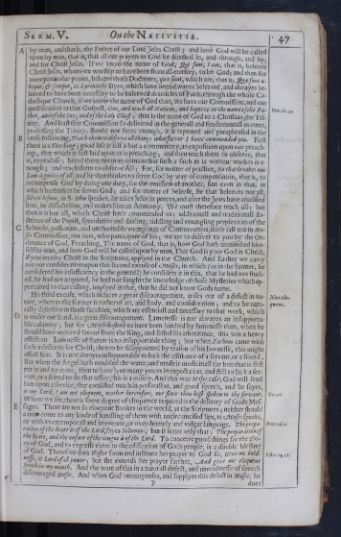 Serm. V.
On the Nativitie.
47
by man, and that is, the Father of our Lord Jesus Christ; and how God will be called
Serm. V.
On the Nativitie.
47
by man, and that is, the Father of our Lord Jesus Christ; and how God will be called
upon by man, that is, that all our prayers to God be directed in, and through, and by,
and for Christ Jesus. If we know the name of God, Qui sum, I am, that is, beleeve
Christ Jesus, whom we worship to have been from all eternity, to be God; and then for
more particular points, beleeve those Doctrines, quæ sunt, which are, that is, Quæ sunt u-
bique, & semper, as Lyrinensis sayes, which have been alwayes beleeved, and alwayes be-
leeved to have been necessary to be beleeved as articles of Faith, through the whole Ca-
tholique Church, if we know the name of God thus, we have our Commission, and our
qualification in that Gospell, Goe, and teach all Nations,Mat. 28.19. and baptize in the name of the Fa-
ther, and of the Son, and of the holy Ghost; that is the name of God to a Christian, the Tri-
nity. And least that Commission so delivered in the generall and fundamentall manner,
professing the Trinity, should not seem enough, it is repeated and paraphrased in the
verse following, Teach them to observe all things whatsoever I have commanded you. First
there is a Teaching; good life it self is but a commentary, an exposition upon our preach-
ing; that which is first laid upon us is preaching; and then teach them to observe, that
is, to practise; breed them not in an opinion that such a faith as is without workes is e-
nough; and teach them to observe All; For, for matter of practice, He that breakes one
Law is guilty of all, and he that thinkes to serve God by way of compensation, that is, to
recompense God by doing one duty, for the omission of another, sins even in that, in
which he thinkes he serves God; and for matter of beleefe, he that beleeves not all,
solvit Iesum, as S. Iohn speakes, he takes Jesus in peeces, and after the Jews have crucified
him, he dissects him, and makes him an Anatomy. We must therefore teach all; but
then it is but all, which Christ hath commanded us; additionall and traditionall do-
ctrines of the Papist, speculative and dazling, riddling and entangling perplexities of the
Schoole, passionate, and uncharitable wranglings of Controverters, these fall not in Mo-
ses Commission, nor ours, who participate of his; we are to deliver to you by the Or-
dinance of God, Preaching, The name of God, that is, how God hath manifested him-
self to man, and how God will be called upon by man, That God is your God in Christ,
if you receive Christ in the Scriptures, applyed in the Church. And farther we carry
not our consideration upon this second excuse of Moses, in which (as in the former, he
considered his insufficiency in the generall) he considers it in this, that he had not studi-
ed, he had not acquired, he had not sought the knowledge of those Mysteries which ap-
pertained to that calling, implyed in that, that he did not know Gods name.
His third excuse, which induces a great discouragement, Non elo-
quens. arises out of a defect in na-
ture, whereas the former is rather of art, and study, and consideration; and to be natu-
rally defective in those faculties, which are essentiall and necessary to that work, which
is under our hand, is a great discouragement. Lamenesse is not alwayes an insupporta-
ble calamity; but for Mephibosheth to have been hindred by lamenesse then, when he
should have received favour from the King, and setled his inheritance, this was a heavy
affliction. Lownesse of stature is no insupportable thing; but when Zacheus came with
such a desire to see Christ, then to be disappointed by reason of his lownesse, this might
affect him. It is not alwayes insupportable to lack the assistance of a servant, or a friend;
But when the Angel hath troubled the water, and made it medicinall for him that is first
put in and no more, then to have lyen many yeares in expectation, and still to lack a ser-
vant, or a friend to do that office, this is a misery. And this was Moses case; God will send
him upon a service, that consisted much in perswasion, and good speech, and he sayes,
O my Lord, I am not eloquent, neither heretofore, nor since thou hast spoken to thy servant.
Ver. 10. Where we see, there is some degree of eloquence required in the delivery of Gods Mes-
sages. There are not so eloquent Bookes in the world, as the Scriptures; neither should
a man come to any kinde of handling of them with uncircumcised lips, as Moses speaks,
or with an extemporall and irreverent, or over-homely and vulgar language.Prov. 16.1. The prepa-
ration of the heart is of the Lord, sayes Solomon; but it is not only that; The preparation of
the heart, and the answer of the tongue is of the Lord. To conceive good things for the glo-
ry of God, and to expresse them to the edification of Gods people, is a double blessing
of God. Therefore does Hester form and institute her prayer to God so, Ester 14.12. Give me bold-
nesse, O Lord of all power; but she extends her prayer farther, And give me eloquent
speech in my mouth. And the want of this in a naturall defect, and unreadinesse of speech
discouraged Moses. And when God recompenses, and supplyes this defect in Moses, he F does
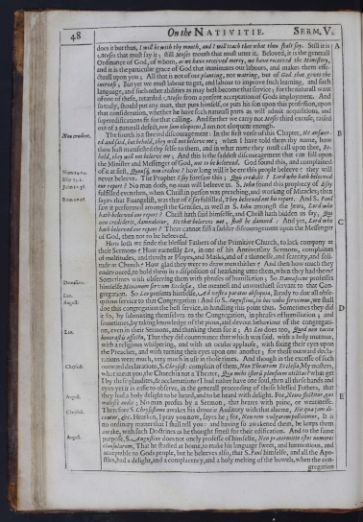 48On the Nativitie.
Serm. V.does it but thus, I will be with thy mouth, and I will teach thee what thou shalt say. Still it is
48On the Nativitie.
Serm. V.does it but thus, I will be with thy mouth, and I will teach thee what thou shalt say. Still it is
Moses that must say it; still Moses mouth that must utter it. Beloved, it is the generall
Ordinance of God, of whom, as we have received mercy, we have received the Ministery,
and it is the particular grace of God that inanimates our labours, and makes them effe-
ctuall upon you; All that is not of our planting, nor watring, but of God that gives the
increase; But yet we must labour to get, and labour to improve such learning, and such
language, and such other abilities as may best become that service; for the naturall want
of one of these, retarded Moses from a present acceptation of Gods imployment. And
so truly, should put any man, that puts himself, or puts his son upon this profession, upon
that consideration, whether he have such naturall parts as will admit acquisitions, and
superedifications fit for that calling. And farther we carry not Moses third excuse, raised
out of a naturall defect, non sum eloquens, I am not eloquent enough. The fourth is a shrewd discouragement: Non credent. In the first verse of this Chapter, He answer-
ed and said, but behold, they will not beleeve me; when I have told them thy name, how
thou hast manifested thy selfe to them, and in what name they must call upon thee, Be-
hold, they will not beleeve me; And this is the saddest discouragement that can fall upon
the Minister and Messenger of God, not to be beleeved. God found this, and complained
of it at first, Num. 14.11. Quousque non credent? how long will it be ere this people beleeve? they will
never beleeve. The Prophet Esay foresaw this; Esay 53.1. Quis credidit? Lord who hath beleeved
our report? No man doth, no man will beleeve us. S. Iohn found this prophecy of Esay John 12.38.
fulfilled even then, when Christ in person was preaching, and working of Miracles; then
sayes that Euangelist, Rom. 10.16. was that of Esay fulfilled, They beleeved not his report. And S. Paul
saw it performed amongst the Gentiles, as well as S. Iohn amongst the Jews, Lord who
hath beleeved our report? Christ hath said himselfe, and Christ hath bidden us say, Qui
non crediderit, damnabitur, He that beleeves not, shall be damned: And yet, Lord who
hath beleeved our report? There cannot fall a sadder discouragement upon the Messenger
of God, then not to be beleeved. How loth we finde the blessed Fathers of the Primitive Church, to lack company at
their Sermons? How earnestly Leo, in one of his Anniversary Sermons, complaines
of multitudes, and thrusts at Playes, and Masks, and of a thinnesse, and scarcity, and soli-
tude at Church? How glad they were to draw men thither? And then how much they
endevoured, to hold them in a disposition of hearkning unto them, when they had them?
Sometimes with observing them with phrases of humiliation; So Damascene professes Damascen.
himselfe Minimum servum Ecclesiæ, the meanest and unworthiest servant to that Con-
gregation. So Leo presents himselfe, Leo. Ad vestra paratus obsequia, Ready to doe all obse-
quious service to that Congregation: And so S. Augustine, In hoc vobis servimus, we shallAugust.
doe this congregation the best service, in handling this point thus. Sometimes they did
it so, by submitting themselves to the Congregation, in phrases of humiliation; and
sometimes, by taking knowledge of the pious, and devout behaviour of the congregati-
on, even in their Sermons, Leo. and thanking them for it; As Leo does too, Quod non tacito
honorastis affectu, That they did countenance that which was said, with a holy murmur,
with a religious whispering, and with an ocular applause, with fixing their eyes upon
the Preacher, and with turning their eyes upon one another; for those outward decla-
rations were much, very much in use in those times. And though in the excesse of such
outward declarations, Chrysost. S. Chrysost: complain of them, Non Theatrum Ecclesia, My masters,
what mean you, the Church is not a Theater, Quæ mihi istorū plausuum utilitas? what get
I by these plaudites, & acclamations? I had rather have one soul, then all these hands and
eyes: yet it is easie to observe, in the generall proceeding of those blessed Fathers, that
they had a holy delight to be heard, August. and to be heard with delight. For, Nemo flectitur, qui
molestè audit; No man profits by a Sermon, that heares with paine, or wearinesse.
Therefore S. Chrysostome awakes his drouzie Auditory with that alarme, Chrysost. His quæ jam di-
cuntur, &c. Hearken, I pray you now, sayes he; for, Non rem vulgarem pollicemur, It is
no ordinary matter that I shall tell you: and having so awakened them, he keeps them
awake, with such Doctrines as he thought fittest for their edification. And to the same
purpose, August. S. Augustine does not onely professe of himselfe, Non prætermitto istos numeros
clausularum, That he studied at home, to make his language sweet, and harmonious, and
acceptable to Gods people, but he beleeves also, that S. Paul himselfe, and all the Apo-
stles, had a delight, and a complacency, and a holy melting of the bowels, when the con-
gregation
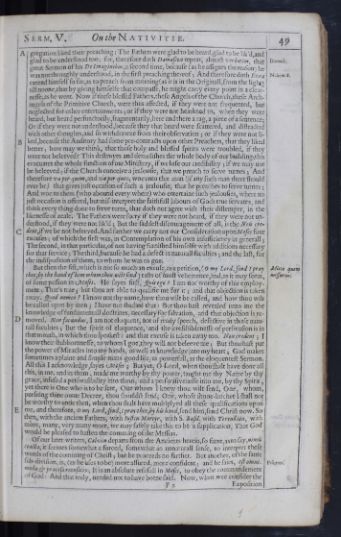 49On the Nativitie.
Serm. V.gregation liked their preaching: The Fathers were glad to be heard, glad to be lik'd, and
49On the Nativitie.
Serm. V.gregation liked their preaching: The Fathers were glad to be heard, glad to be lik'd, and
glad to be understood too; for, therefore doth Damascen repeat, almost verbatim,Damasc. that
great Sermon of his De Imaginibus, a second time, because (as he assignes the reason) he
was not throughly understood, in the first preaching thereof;Nehem. 8. And therefore doth Ezra
extend himself so far, as to preach from morning (as it is in the Originall, from the light)
till noone, that by giving himselfe that compasse, he might carry every point in a clear-
nesse, as he went. Now if these blessed Fathers, these Angels of the Church, these Arch-
angels of the Primitive Church, were thus affected, if they were not frequented, but
neglected for other entertainments; or if they were not hearkned to, when they were
heard, but heard perfunctorily, fragmentarily, here and there a rag, a piece of a sentence;
Or if they were not understood, because they that heard were scattered, and distracted
with other thoughts, and so withdrawne from their observation; or if they were not li-
ked, because the Auditory had some pre-contracts upon other Preachers, that they liked
better; how may we think, that those holy and blessed spirits were troubled, if they
were not beleeved? This destroyes and demolishes the whole body of our building; this
evacuates the whole function of our Ministery, if we lose our credibility; if we may not
be beleeved; if the Church conceive a jealousie, that we preach to serve turnes; And
therefore væ per quem, and væ per quos; woe unto that man (if any such man there should
ever be) that gives just occasion of such a jealousie, that he preaches to serve turnes;
And woe to them (who abound every where) who entertaine such jealousies, where no
just occasion is offered, but mis-interpret the faithfull labours of Gods true servants, and
think every thing done to serve turns, that doth not agree with their distemper, in the
likenesse of zeale. The Fathers were sorry if they were not heard, if they were not un-
derstood, if they were not lik'd; But the saddest discouragement of all, is the Non cre-
dent, if we be not beleeved. And farther we carry not our Consideration upon Moses four
excuses; of which the first was, in Contemplation of his own insufficiency in generall;
The second, in that particular, of not having furnished himselfe with additions necessary
for that service; The third, because he had a defect in naturall faculties; and the last, for
the indisposition of them, to whom he was to goe. But then the fift, which is not so much an excuse, as a petition, (O my Lord,Mitte quem
missurus. send I pray
thee, by the hand of him whom thou wilt send) tasts of most vehemence, and, as it may seem,
of some passion in Moses. He sayes first, Quis ego? I am not worthy of this employ-
ment; That's true; but thou art able to qualifie me for it; and that objection is taken
away. Quod nomen? I know not thy name, how thou wilt be called, and how thou wilt
be called upon by men; I have not studied that: But thou hast revealed unto me the
knowledge of fundamentall doctrines, necessary for salvation, and that objection is re-
moved. Non facundus, I am not eloquent, not of ready speech, defective in those natu-
rall faculties; But the spirit of eloquence, and the irresistiblenesse of perswasion is in
that mouth, in which thou speakest: and that excuse is taken away too. Non credent; I
know their stubbornnesse, to whom I goe, they will not beleeve me; But thou hast put
the power of Miracles into my hands, as well as knowledge into my heart; God makes
sometimes a plaine and simple mans good life, as powerfull, as the eloquentest Sermon.
All this I acknowledge, sayes Moses; But yet, O Lord, when thou shalt have done all
this, in me, and in them, made me worthy by thy power, taught me thy Name by thy
grace, infused a perswasibility into them, and a perswasivenesse into me, by thy Spirit,
yet there is One who is to be sent, One whom I know thou wilt send, One, whom,
pursuing thine owne Decree, thou shouldst send, One, whose shooe-latchet I shall not
be worthy to untie then, when thou shalt have multiplyed all these qualifications upon
me, and therefore, O my Lord, send, I pray thee, by his hand, send him, send Christ now. So
then, with the ancient Fathers, with Iustin Martyr, with S. Basil, with Tertullian, with
more, many, very many more, we may safely take this to be a supplication, That God
would be pleased to hasten the comming of the Messias. Of our later writers, Calvin departs from the Ancients herein, so farre, as to say, nimis
coacta, it seemes somewhat a forced, somewhat an unnaturall sense, to interpret these
words of the comming of Christ; but he proceeds no farther. But another, of the same
sub-division, is, (as he uses to be) more assured, more confident; and he saies, Piscator. est omni-
moda & præcisa recusatio; It is an absolute refusall in Moses, to obey the commandement
of God: And that truly, needed not to have beene said. Now, when wee consider the F2Exposition
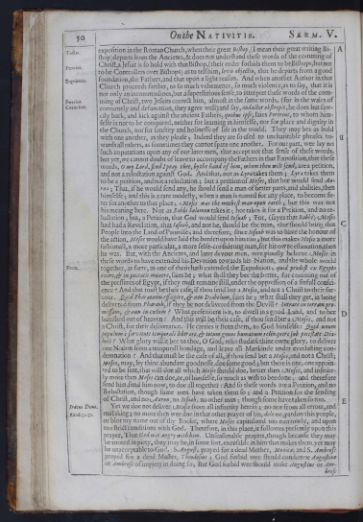 50On the Nativitie.
Serm. V.exposition in the Roman Church, Tostat. when their great Bishop, (I mean their great writing Bi-
50On the Nativitie.
Serm. V.exposition in the Roman Church, Tostat. when their great Bishop, (I mean their great writing Bi-shop) departs from the Ancients, & does not understand these words of the comming of
Christ, Pererius. a Jesuit is so bold with that Bishop, (their order forbids them to be Bishops, but not
to be Controllers over Bishops) as to tell him, levis objectio, that he departs from a good
foundation, Eugubinus. the Fathers, and that upon a light reason. And when another Author in that
Church proceeds farther, to so much vehemence, so much violence, as to say, that it is
not only an incommodious, but a superstitious sense, to interpret these words of the com-
ming of Christ, Pererius. two Jesuits correct him, almost in the same words, (for in the waies of
contumely and defamation, they agree well) and say, audacter obstrepit, he does but Cornelius. saw-
cily bark, and kick against the ancient Fathers, quibus ipse, saies Pererius, to whom him-
selfe is not to be compared, neither for learning in himselfe, nor for place and dignity in
the Church, nor for sanctity and holinesse of life in the world. They may bee as bold
with one another, as they please; Indeed they are so used to uncharitable phrases to-
wards all others, as sometimes they cannot spare one another. For our part, wee lay no
such imputations upon any of our later men, that accept not that sense of these words,
but yet, we cannot doubt of leave to accompany the Fathers in that Exposition, that these
words, O my Lord, send I pray thee, by the hand of him, whom thou wilt send, are a petition,
and not a reluctation against God. And that, not as Lyra takes them; Lyra takes them
to be a petition, and not a reluctation; but a petition of Moses, that hee would send Aa-
ron; That, if he would send any, he should send a man of better parts, and abilities, then
himselfe; and this is a rare modesty, when a man is named for any place, to become su-
ter for another to that place; Moses was the meekest man upon earth; but this was not
his meaning here. Nor as Rabbi Solomon takes it; hee takes it for a Petition, and no re-
luctation; but, a Petition, that God would send Iosuah; For, (sayes that Rabbi) Moses
had had a Revelation, that Iosuah, and not he, should be the man, that should bring that
People into the Land of Promise; and therefore, since Iosuah was to have the honour of
the action, Moses would have laid the burden upon him too; but this makes Moses a more
fashionall, a more particular, a more selfe-considering man, for his owne estimation, then
he was. But, with the Ancients, and later devout men, wee piously beleeve Moses in
these words to have extended his Devotion towards his Nation, and the whole world
together, Ferus. as farre, as one of them hath extended the Exposition; quid prodest ex Egypto
exire, & in peccatis manere, saies he; what shall they bee the better, for comming out of
the pressures of Egypt, if they must remaine still, under the oppression of a sinfull consci-
ence? And that must be their case, if thou send but a Moses, and not a Christ to their suc-
cour. Quid Pharaonem effugere, & non Diabolum, saies he; what shall they get, in being
delivered from Pharaoh, if they be not delivered from the Devill? Intrare in terram pro-
missam, & non in cœlum? What preferment is it, to dwell in a good Land, and to bee
banished out of heaven? And this will be their case, if thou send but a Moses, and not
a Christ, for their deliverance. He carries it from them, to God himselfe: Quid unum
populum è servitute temporali liberare, & totum genus humanum relinquere sub potestate Dia-
boli? What glory will it bee to thee, O God, who studiest thine owne glory, to deliver
one Nation from a temporall bondage, and leave all Mankinde under everlasting con-
demnation? And that must be the case of all, if thou send but a Moses, and not a Christ;
Moses, may, by thine abundant goodnesse, doe some good; but there is one, one appoin-
ted to be sent, that will doe all which Moses should doe, better then Moses, and infinite-
ly more then Moses can doe, or, of himselfe, so much as wish to bee done; and therefore
send him, send him now, to doe all together: And so these words are a Petition, and no
Reluctation, though some men have taken them so; and a Petition for the sending
of Christ, and no Aaron, no Iosuah, no other man; though some have taken so too. Yet we doe not deliver Moses from all infirmity herein;Iratus Deus. no nor from all errour, and
mistaking; no more then wee doe in that other prayer of his, dele me, pardon this people, Exod. 32.32.
or blot my name out of thy Booke, where Moses capitulated too narrrowly, and upon
too strict conditions with God. Therefore, in this place, it followes presently upon this
prayer, That God was angry with him. Unseasonable prayers, though because they may
be rooted in piety, they may be, in some sort, excusable in him that makes them, yet may
be unacceptable to God. S. August. prayed for a dead Mother, Monica; and S. Ambrose
prayed for a dead Master, Theodesius; God forbid wee should condemne Augustine
or Ambrose of impiety in doing so; But God forbid wee should make Augustine or Am-
brose
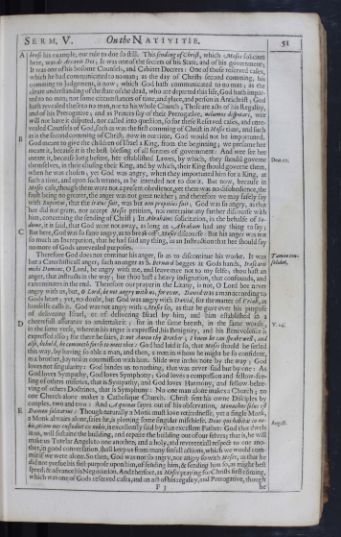 51On the Nativitie.
Serm. V.
brose his example, our rule to doe so still. This sending of Christ, which Moses solicites
51On the Nativitie.
Serm. V.
brose his example, our rule to doe so still. This sending of Christ, which Moses solicites
here, was de Arcanis Dei; It was one of the secrets of his State, and of his government;
It was one of his bosome Counsels, and Cabinet Decrees: One of those reserved cases,
which he had communicated to no man; as the day of Christs second comming, his
comming to Judgement, is now; which God hath communicated to no man; as the
cleare understanding of the state of the dead, who are departed this life, God hath impar-
ted to no man; nor some circumstances of time, and place, and person in Antichrist; God
hath revealed these to no man, not to his whole Church; These are acts of his Regality,
and of his Prerogative; and as Princes say of their Prerogative, nolumus disputari, wee
will not have it disputed, nor called into question, so for these Reserved cases, and unre-
vealed Counsels of God, such as was the first comming of Christ in Moses time, and such
as is the second comming of Christ, now in our time, God would not be importuned.
God meant to give the children of Israel a King, from the beginning; we presume hee
meant it, because it is the best blessing of all formes of government: And wee see hee
meant it, because long before, hee established Lawes, by which, Deut. 17. they should governe
themselves, in their chusing their King, and by which, their King should governe them,
when he was chosen; yet God was angry, when they importuned him for a King, at
such a time, and upon such termes, as he intended not to doe it. But now, because in
Moses case, though there were not a present obedience, yet there was no disobedience, the
fault being no greater, the anger was not great neither; and therefore we may safely say
with Rupertus, that the iratus fuit, was but non propitius fuit; God was so angry, as that
hee did not grant, nor accept Moses petition, nor entertaine any farther discourse with
him, concerning the sending of Christ; In Abrahams solicitation, in the behalfe of So-
dome, it is said, that God went not away, as long as Abraham had any thing to say;
But here, God was so farre angry, as to break off Moses discourse: But his anger was not
so much an Increpation, that he had said any thing, as an Instruction that hee should say
no more of Gods unrevealed purposes.
Therefore God does not continue his anger, so as to discontinue his worke.Tamen con-
solidat. It was
but a Catechisticall anger, such an anger as S. Bernard begges at Gods hands, Irascaris
mihi Domine, O Lord, be angry with me, and leave mee not to my selfe; thou hast an
anger, that instructs in the way; but thou hast a heavy indignation, that confounds, and
exterminates in the end. Therefore our prayer in the Litany, is not, O Lord bee never
angry with us; but, O Lord, be not angry with us, for ever. David was a man according to
Gods heart; yet, no doubt, but God was angry with David, for the matter of Vriah, as
himselfe calls it. God was not angry with Moses so, as that he gave over his purpose
of delivering Israel, or of delivering Israel by him, and him established in a
cheerefull assurance to undertake it; for in the same breath, in the same words, V. 14.
in the same verse, wherein his anger is expressed, his Benignity, and his Benevolence is
expressed also; for there he saies, Is not Aaron thy Brother; I know he can speake well; and
also, behold, he commeth forth to meet thee: God had laid it so, that Moses should be setled
this way, by having so able a man, and then, a man in whom he might be so confident,
as a brother, joyned in commission with him. Slide wee in this note by the way; God
loves not singularity: God bindes us to nothing, that was never said but by one: As
God loves Sympathy, God loves Symphony; God loves a compassion and fellow-fee-
ling of others miseries, that is Sympathy, and God loves Harmony, and fellow belee-
ving of others Doctrines, that is Symphony: No one man alone makes a Church; no
one Church alone makes a Catholique Church. Christ sent his owne Disciples by
couples, two and two: And Aquinas sayes out of his observation, Monachus solus est
Dæmon solitarius: Though naturally a Monk must love retirednesse, yet a single Monk,
a Monk alwaies alone, saies he, is plotting some singular mischiefe. Deus qui habitat in August. no-
bis, etiam nos custodiet ex nobis, is excellently said by that excellent Father: God that dwels
in us, will sustaine the building, and repaire the building out of our selves; that is, he will
make us Tutelar Angels to one another; and a holy, and reverentiall respect to one ano-
ther, in good conversation, shall keep us from many sinfull actions, which we would com-
mit if we were alone. So then, God was not so angry, nor angry so with Moses, as that he
did not pursue his first purpose upon him, of sending him, & sending him so, as might best
speed, & advance his Negotiation. And therfore, as Moses praying for Christs first cōming,
which was one of Gods reserved cases, and an act of his regality, and Prerogative, though F3 he
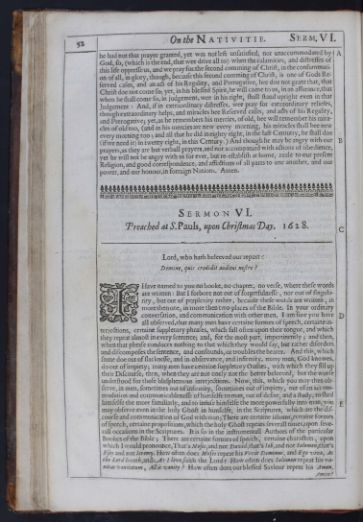 52On the Nativitie.
Serm. VI.he had not that prayer granted, yet was not left unsatisfied, nor unaccommodated by
52On the Nativitie.
Serm. VI.he had not that prayer granted, yet was not left unsatisfied, nor unaccommodated by
God, so, (which is the end, that wee drive all to) when the calamities; and distresses of
this life oppresse us, and we pray for the second comming of Christ, in the consummati-
on of all, in glory, though, because this second comming of Christ, is one of Gods Re-
served cases, and an act of his Regality, and Prerogative, hee doe not grant that, that
Christ doe not come so; yet, in his blessed Spirit, he will come to us, in an assurance, that
when he shall come so, in judgement, wee in his right, shall stand upright even in that
Judgement: And, if in extraordinary distresses, wee pray for extraordinary reliefes,
though extraordinary helps, and miracles bee Reserved cases, and acts of his Regality,
and Prerogative; yet, as he remembers his mercies, of old, hee will remember his mira-
cles of old too, (and as his mercies are new every morning, his miracles shall bee new
every morning too; and all that he did in eighty eight, in the last Centutry, he shall doe
(if we need it) in twenty eight, in this Century;) And though he may be angry with our
prayers, as they are but verball prayers, and not accompanied with actions of obedience,
yet he will not be angry with us for ever, but re-establish at home, zeale to our present
Religion, and good correspondence, and affections of all parts to one another, and our
power, and our honour, in forraign Nations. Amen.
Sermon VI.
Preached at S. Pauls, upon Christmas Day. 1628.
Lord, who hath beleeved our report?
Domine, quis credidit auditui nostro?
I HaveI have named to you no booke, no chapter, no verse, where these words
are written: But I forbore not out of forgetfulnesse, nor out of singula-
rity, but out of perplexity rather, because these words are written, in
more then one, in more then two places of the Bible. In your ordinary
conversation, and communication with other men, I am sure you have
all observed, that many men have certaine formes of speech, certaine in-
terjections, certaine suppletory phrases, which fall often upon their tongue, and which
they repeat almost in every sentence; and; for the most part, impertinently; and then,
when that phrase conduces nothing to that which they would say; but rather disorders
and discomposes the sentence, and confounds, or troubles the hearer. And this, which
some doe out of slacknesse, and in-observance, and infirmity, many men, God knowes,
do out of impiety; many men have certaine suppletory Oathes, with which they fill up
their Discourse, then, when they are not onely not the better beleeved, but the worse
understood for those blasphemous interjections. Now, this, which you may thus ob-
serve, in men, sometimes out of infirmity, sometimes out of impiety, out of an accom-
modation and communicablenesse of himselfe to man, out of desire, and a study, to shed
himselfe the more familiarly, and to infuse himselfe the more powerfully into man, you
may observe even in the holy Ghost in himselfe, in the Scriptures, which are the dis-
course and communication of God with man; There are certaine idioms, certaine formes
of speech, certaine propositions, which the holy Ghost repeats severall times, upon seve-
rall occasions in the Scriptures. It is so in the instrumentall Authors of the particular
Bookes of the Bible; There are certaine formes of speech, certaine characters, upon
which I would pronounce, That's Moses, and not David, that's Iob, and not Solomon, that's
Esay and not Ieremy. How often does Moses repeat his Vivit Dominus, and Ego vivo, As
the Lord liveth, and As I live, saith the Lord? How often does Solomon repeat his va-
nitas vanitatum, All is vanity? How often does our blessed Saviour repeat his Amen, Amen?
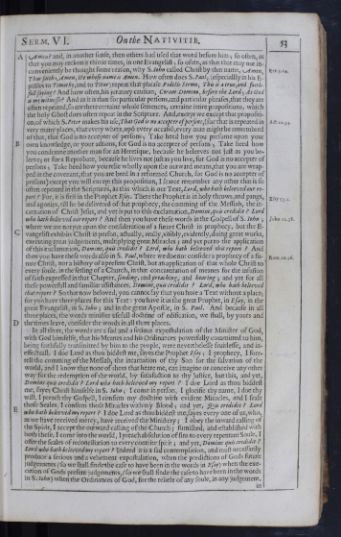 53On the Nativitie.
Serm. VI.
Amen? and, in another sense, then others had used that word before him; so often, as
53On the Nativitie.
Serm. VI.
Amen? and, in another sense, then others had used that word before him; so often, as
that you may reckon it thirtie times, in one Evangelist; so often, as that that may not in-
conveniently be thought some reason, why S. Iohn called Christ by that name, Amen, Rev. 3.14.
Thus saith Amen, He whose name is Amen. How often does S. Paul, (especiallly in his E-
pistles to Timothy, and to Titus) repeat that phrase Fidelis Sermo, This is a true, and faith-
full saying? And how often, his juratory caution, Coram Domino, before the Lord; As God
is my witnesse? And as it is thus for particular persons, and particular phrases, that they are
often repeated; so are there certaine whole sentences, certaine intire propositions, which
the holy Ghost does often repeat in the Scripture. And, except we except that propositi-
on, of which S. Peick makes his use, That God is no accepter of persons,Act. 10.34. (for that is repeated in
very many places, that every where, upō every occasiō, every man might be remembred
of that, that God is no accepter of persons; Take heed how you presume upon your
own knowledge, or your actions, for God is no accepter of persons; Take heed how
you condemne another man for an Heretique, because he beleeves not just as you be-
leeve; or for a Reprobate, because he lives not just as you live, for God is no accepter of
persons; Take heed how you relie wholly upon the outward means, that you are wrap-
ped in the covenant, that you are bred in a reformed Church, for God is no accepter of
persons) except you will except this proposition, I scarce remember any other that is so
often repeated in the Scriptures, as this which is our Text, Lord, who hath beleeved our re-
port? For, it is first in the Prophet Esay. There the Prophet is in holy throws, and pangs, Esay 53.1.
and agonies, till he be delivered of that prophecy, the comming of the Messiah; the in-
carnation of Christ Jesus, and yet is put to this exclamation, Domine, quis credidit? Lord
who hath beleeved our report? And then you have these words in the Gospell of S. Iohn;John 12.38.
where we are not put upon the consideration of a future Christ in prophecy, but the E-
vangelist exhibits Christ in person, actually, really, visibly, evidently, doing great works,
executing great judgements, multiplying great Miracles; and yet put to the application
of this exclamation, Domine, quis credidit? Lord, who hath beleeved this report? And
then you have these words also in S. Paul,Rom. 10.16. where we doe not consider a prophecy of a fu-
ture Christ, nor a history of a present Christ, but an application of that whole Christ to
every soule, in the fetling of a Church, in that concatenation of meanes for the infusion
of faith expressed in that Chapter, sending, and preaching, and hearing; and yet for all
these powerfull and familiar assistances, Domine, quis crodidit? Lord, who hath beleeved
that report? So that now beloved, you cannot say that you have a Text without a place;
for you have three places for this Text: you have it in the great Prophet, in Esay, in the
great Evangelist, in S. Iohn; and in the great Apostle, in S. Paul. And because in all
three places, the words minister usefull doctrine of edification, we shall, by yours and
the times leave, consider the words in all three places.
In all three, the words are a sad and a serious expostulation of the Minister of God,
with God himselfe, that his Meanes and his Ordinances powerfully committed to him,
being faithfully transmitted by him to the people, were neverthelesse fruitlesse, and in-
effectuall. I doe Lord as thou biddest me, sayes the Prophet Esay; I prophecy, I fore-
tell the comming of the Messiah, the incarnation of thy Son for the salvation of the
world, and I know that none of them that heare me, can imagine or conceive any other
way for the redemption of the world, by fatisfaction to thy Justice, but this, and yet,
Domine quis credidit? Lord who hath beleeved my report? I doe Lord as thou biddest
me, sayes Christ himselfe in S. Iohn; I come in person, I glorifie thy name, I doe thy
will, I preach thy Gospell, I confirm my doctrine with evident Miracles, and I seale
those Seales, I confirm those Miracles with my Blood; and yet, Quis credidit? Lord
who hath beleeved my report? I doe Lord as thou biddest me, sayes every one of us, who,
as we have received mercy, have received the Ministery; I obey the inward calling of
the Spirit, I accept the outward calling of the Church; furnished, and established with
both these, I come into the world, I preach absolution of sins to every repentant Soule, I
offer the seales of reconciliation to every contrite spirit; and yet, Domine quis credidit?
Lord who hath beleeved my report? Indeed it is a sad contemplation, and must necessarily
produce a serious and a vehement expostulation, when the predictions of Gods future
judgements (so we shall finde the case to have been in the words in Esay) when the exe-
cution of Gods present judgements, (so we shall finde the case to have been in the words
in S. Iohn) when the Ordinances of God, for the reliefe of any soule, in any judgement, in
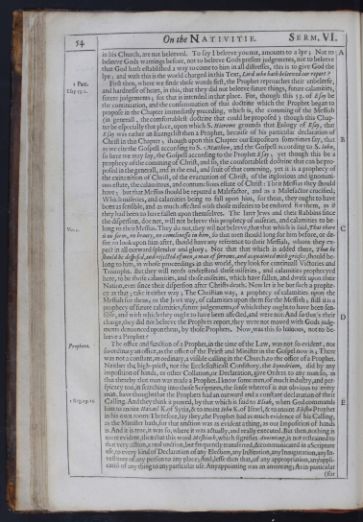 54On the Nativitie.
Serm. VI.in his Church, are not beleeved. To say I beleeve you not, amounts to a lye; Not to
54On the Nativitie.
Serm. VI.in his Church, are not beleeved. To say I beleeve you not, amounts to a lye; Not to
beleeve Gods warnings before, not to beleeve Gods present judgements, not to beleeve
that God hath established a way to come to him in all distresses, this is to give God the
lye; and with this is the world charged in this Text, Lord who hath beleeved our report?
First then, 1 Part. where we finde these words first, the Prophet reproaches their unbeleefe,
and hardnesse of heart, in this, that they did not beleeve future things, future calamities, Esay 53.1.
future judgements; for that is intended in that place. For, though this 53. of Esay be
the continuation, and the consummation of that doctrine which the Prophet began to
propose in the Chapter immediatly preceding, which is, the comming of the Messiah
(in generall, the comfortablest doctrine that could be proposed) though this Chap-
ter be especially that place, upon which S. Hierome grounds that Eulogy of Esay, that
Esay was rather an Euangelist then a Prophet, because of his particular declaration of
Christ in this Chapter; though upon this Chapter our Expositors sometimes say, that
as we cite the Gospell according to S. Matthew, and the Gospell according to S. Iohn,
so here we may say, the Gospell according to the Prophet Esay; yet though this be a
prophecy of the comming of Christ, and so, the comfortablest doctrine that can be pro-
posed in the generall, and in the end, and fruit of that comming, yet it is a prophecy of
the exinanition of Christ, of the evacuation of Christ, of the inglorious and ignomini-
ous estate, the calamitous, and contumelious estate of Christ: Their Messias they should
have; but that Messias should be reputed a Malefactor, and as a Malefactor crucified;
Which miseries, and calamities being to fall upon him, for them, they ought to have
been as sensible, and as much affected with those miseries to be endured for them, as if
they had been to have fallen upon themselves. The later Jews and their Rabbins since
the dispersion, doe not, will not beleeve this prophecy of miseries, and calamities to be-
long to their Messias.Ver. 2. They do not, they wil not beleeve, that that which is said, That there
is no form, no beauty, no comelinesse in him, so that men should long for him before, or de-
sire to look upon him after, should have any reference to their Messiah, whom they ex-
pect in all outward splendor and glory; Nor that that which is added there, That he
should be despised, and rejected of men, a man of sorrows, and acquainted with griefes, should be-
long to him, in whose proceedings in this world, they look for continuall Victories and
Triumphs. But they will needs understand these miseries, and calamities prophecyed
here, to be those calamities, and those miseries, which have fallen, and dwelt upon their
Nation, ever since their dispersion after Christs death. Now let it be but such a prophe-
cy as that; take it either way; The Christian way, a prophecy of calamities upon the
Messiah for them; or the Jews way, of calamities upon them for the Messiah; still it is a
prophecy of future calamities, future judgements, of which they ought to have been sen-
sible, and with which they ought to have been affected, and were not: And so that's their
charge, they did not beleeve the Prophets report, they were not moved with Gods judg-
ments denounced upon them, by those Prophets. Now, was this so hainous, not to be-
leeve a Prophet?
The office and function of a Prophet, Propheta. in the time of the Law, was not so evident, nor
so ordinary an office, as the office of the Priest and Minister in the Gospel now is; There
was not a constant, an ordinary, a visible calling in the Church, to the office of a Prophet.
Neither the high-priest, nor the Ecclesiasticall Consistory, the Synedrium, did by any
imposition of hands, or other Collation, or Declaration, give Orders to any man so, as
that thereby that man was made a Prophet. I know some men, of much industry, and per-
spicacy too, in searching into those Scriptures, the sense whereof is not obvious to every
man, have thought that the Prophets had an outward and a constant declaration of their
Calling.1 Reg. 19.15. And they think it proved, by that which is said to Eliah, when God commands
him to anoint Hazael K. of Syria, & to anoint Iehu K. of Israel, & to anoint Elisha Prophet
in his own room: Therefore, say they, the Prophet had as much evidence of his Calling,
as the Minister hath, for that unction was as evident a thing, as our Imposition of hands
is. And it is true, it was so, where it was actually, and really executed. But then, nothing is
more evident, then that this word Meshiach, which signifies Anointing, is not restrained to
that very action, a real unction, but frequently transferred, & communicated in a Scripture
use, to every kind of Declaration of any Election, any Institution, any Inauguration, any In-
vestiture of any person to any place; And, lesse then that, of any appropriation, any appli-
catiō of any thing to any particular use. Any appointing was an anointing; As in particular (for
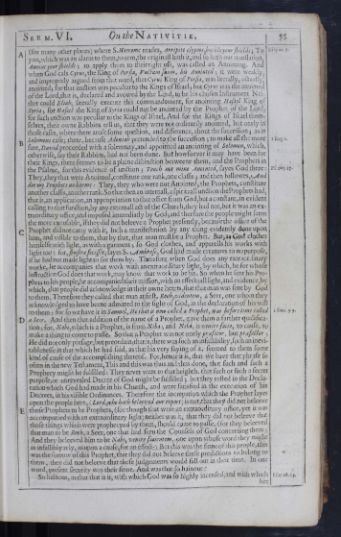 55On the Nativitie.
Serm. VI.(for many other places) where S. Hierome reades, Arripite clypeos, buckle your shields;Esay 21.5. To
55On the Nativitie.
Serm. VI.(for many other places) where S. Hierome reades, Arripite clypeos, buckle your shields;Esay 21.5. To
you, which was an alarm to them, to arm, the originall hath it, and so hath our translation,
Anoint your shields; to apply them to their right use, was called an Anointing. And
when God cals Cyrus, the King of Persia, Vnctum suum, his Anointed; it were weakly,
and improperly argued from that word, that Cyrus King of Persia, was literally, actually,
anointed; for that unction was peculiar to the Kings of Israel; but Cyrus was the anointed
of the Lord, that is, declared and avowed by the Lord, to be his chosen Instrument. Nei-
ther could Eliah, literally execute this commandement, for anointing Hasael King of
Syria; for Hasael the King of Syria could not be anointed by the Prophet of the Lord,
for such unction was peculiar to the Kings of Israel. And for the Kings of Israel them-
selves, their owne Rabbins tell us, that they were not ordinarily anointed, but onely in
those cases, where there arose some question, and difference, about the succession; as in
Solomons case; there, because Adoniah pretended to the succession;1 Reg. 1. to make all the more
sure, David proceeded with a solemnity, and appointed an anointing of Solomon, which,
otherwise, say their Rabbins, had not been done. But howsoever it may have been for
their Kings, there seemes to be a plaine distinction betweene them, and the Prophets in
the Psalme, for this evidence of unction; Touch not mine Anointed, sayes God there:Ps. 105.15.
They, they that were Anointed, constitute one rank, one classis; and then followes, And
doe my Prophets no harme: They, they who were not Anointed, the Prophets, constitute
another classis, another rank. So that then an internall, a spirituall unction the Prophets had,
that is, an application, an appropriation to that office from God, but a constant, an evident
calling to that function, by any externall act of the Church, they had not, but it was an ex-
traordinary office, and imposed immediatly by God; and therfore the people might seem
the more excusable, if they did not beleeve a Prophet presently, because the office of the
Prophet did not carry with it, such a manifestation by any thing evidently done upon
him, and visible to them, that by that, that man must be a Prophet. But, as God clothes
himselfe with light, as with a garment; so God clothes, and apparells his works with
light too: for, frustra fecisset, sayes S. Ambrose, God had made creatures to no purpose,
if he had not made light to see them by. Therefore when God does any extraordinary
worke, he accompanies that work with an extraordinary light, by which, he for whose
instruction God does that work, may know that work to be his. So when he sent his Pro-
phets to his people, he accompanied their mission, with an effectuall light, and evidence, by
which, that people did acknowledge in their owne hearts, that that man was sent by God
to them. Therefore they called that man at first, Roeh, videntem, a Seer, one whom they
acknowledged to have beene admitted to the sight of God, in the declaration of his will
to them: for so we have it in Samuel, He that is now called a Prophet,1 Sam. 9.9. was before time called
a Seer. And then that addition of the name of a Prophet, gave them a farther qualifica-
tion; for, Nabi, which is a Prophet, is from Niba; and Niba, is venire facio, to cause, to
make a thing to come to passe. So that a Prophet was not onely præfator, but præfactor;
He did not only presage, but preordain; that is, there was such an infallibility, such an inevi-
tablenesse in that which he had said, as that his very saying of it, seemed to them some
kind of cause of the accomplishing thereof. For, hence it is, that we have that phrase so
often in the new Testament, This and this was thus and thus done, that such and such a
Prophecy might be fulfilled: They never went to that heighth, that such or such a secret
purpose, or unrevealed Decree of God might be fulfilled; but they rested in the Decla-
ration which God had made in his Church, and were satisfied in the execution of his
Decrees, in his visible Ordinances. Therefore the increpation which the Prophet layes
upon the people here, (Lord, who hath beleeved our report) is not, that they did not beleeve
those Prophets to be Prophets, (for though that were an extraordinary office, yet it was
accompanied with an extraordinary light) neither was it, that they did not beleeve that
those things which were prophecyed by them, should come to passe, (for they beleeved
that man to be Roeh, a Seer, one that had seen the Counsels of God concerning them;
And they beleeved him to be Nabi, venire facientem, one upon whose word they might
as infallibly rely, as upon a cause, for an effect;) But this was the sinne of this people, this
was the sorrow of this Prophet, that they did not beleeve these predictions to belong to
them, they did not beleeve that these judgements would fall out in their time. In one
word, present security was their sinne. And was that so hainous?
So hainous, as that that is it, with which God was so highly incensed, Esay 28.14. and with which hee
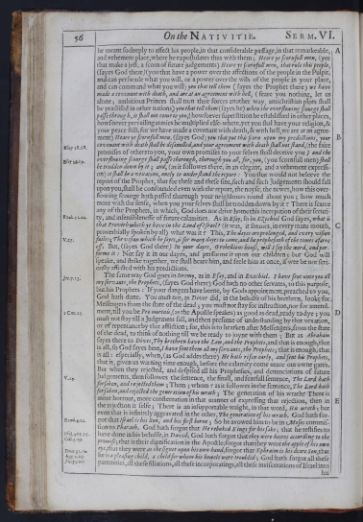 56On the Nativitie.
Serm. VI.he meant so deeply to affect his people, in that considerable passage, in that remarkeable,
56On the Nativitie.
Serm. VI.he meant so deeply to affect his people, in that considerable passage, in that remarkeable,
and vehement place, where he expostulates thus with them; Heare ye scornfull men, (yee
that make a jest, a scorn of future judgements) Heare ye scornfull men, that rule this people,
(sayes God there) (you that have a power over the affections of the people in the Pulpit,
and can perswade what you will, or a power over the wils of the people in your place,
and can command what you will) you that tell them (sayes the Prophet there) we have
made a covenant with death, and are at an agreement with hell, (feare you nothing, let us
alone; ambitious Princes shall turn their forces another way, antichristian plots shall
be practised in other nations) you that tell them (sayes he) when the overflowing scourge shall
passe through, it shall not come to you, (howsoever superstition be established in other places,
howsoever prevailing armies be multiplied else-where, yet you shal have your religion, &
your peace still; for we have made a covenant with death, & with hell, we are at an agree-
ment) Heare ye scornfull men, (sayes God) you that put this scorn upon my predictions, your
covenant with death shall be disanulled,Esay 28.18. and your agreement with death shall not stand, (the faire
promises of others to you, your own promises to your selves shall deceive you) and the
overflowing scourge shall passe thorough,Esay 28.19. thorough you all, for, you, (you scornfull men) shall
be trodden down by it; and, (as it followes there, in an elegant, and a vehement expressi-
on) it shall be a vexation, onely to understand the report: You that would not beleeve the
report of the Prophet, that for these and these sins, such and such Judgements should fall
upon you, shall be confounded even with the report, the noyse, the newes, how this over-
slowing scourge hath passed thorough your neighbours round about you; how much
more with the sense, when you your selves shall be trodden down by it? There is scarce
any of the Prophets, in which, God does not drive home this increpation of their securi-
ty, Ezek. 12.22. and insensiblenesse of future calamities. As in Esay, so in Ezechiel God sayes, what is
that Proverb which ye have in the Land of Israel? (it was, it seemes, in every mans mouth,
proverbially spoken by all) what was it? This, The dayes are prolonged, and every vision
failes;V. 27. The vision which he sayes, is for many dayes to come, and he prophesieth of the times afarre
off. But, (sayes God there) In your dayes, O rebellious house, will I say the word, and per-
forme it: Not say it in our dayes, and performe it upon our children; but God will
speake, and strike together, we shall heare him, and feele him at once, if wee be not seri-
ously affected with his predictions.
The same way God goes in Ieremy,Jer. 7.23. as in Esay, and in Ezechiel. I have sent unto you all
my servants, the Prophets, (sayes God there) God hath no other servants, to this purpose,
but his Prophets: If your dangers have beene, by Gods appointment, preached to you,
God hath done. You must not, as Dives did, in the behalfe of his brethren, looke for.
Messengers from the state of the dead; you must not stay for instruction, nor for amend-
ment, till you be Pro mortuis,1 Cor. 15. (as the Apostle speakes) as good as dead, ready to dye; you
must not stay till a Judgement fall, and then presume of understanding by that vexation,
or of repentance by that affliction; for, this is to hearken after Messengers, from the state
of the dead, to think of nothing till we be ready to joyne with them; But as Abraham
sayes there to Dives, Thy brethren have the Law, and the Prophets, and that is enough, that
is all, so God sayes here, I have sent them all my servants, the Prophets; that is enough, that
is all: especially, when, (as God addes there) He hath risen early, and sent his Prophets,
that is, given us warning time enough, before the calamity come neare our owne gates.
But when they rejected, and despised all his Prophesies, and denunciations of future
Judgements, V. 29. then followes the sentence, the finall, and fearfull sentence. The Lord hath
forsaken, and rejected them; Them; whom? as it followes in the sentence, The Lord hath
forsaken, and rejected the generation of his wrath; The generation of his wrath? There is
more horrour, more consternation in that manner of expressing that rejection, then in
the rejection it selfe; There is an insupportable waight, in that word. His wrath; but
even that is infinitely aggravated in the other, The generation of his wrath. God hath for-
got that Israel is his Son,Exod. 4.22. and his first borne; So he avowed him to be in Moses commis-
sion to Pharaoh. God hath forgot that He rebuked Kings for his sake; that he testifies to
have done in his behalfe, Psal. 105.15. in David; God hath forgot that they were heires according to the
promise; that is their dignification in the Apostle; forgot that they were the apple of his ownGal. 3.29.
eye,Deut. 32.10. that they were as the signet upon his own hand; forgot that Ephraim is his deare Son, that
he is a pleasing child, a child for whom his bowels were troubled; God hath forgot all theseAgg. 2.23.
paternities, all these filiations, all these incorporatings, all these inviscerations of Israel intoJer. 31.20. his
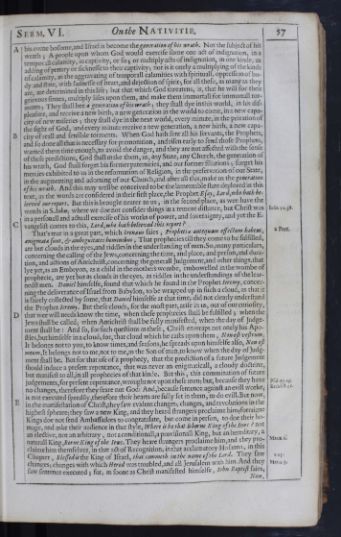 57On the Nativitie.
Serm. VI.his owne bosome, and Israel is become the generation of his wrath. Not the subject of his
57On the Nativitie.
Serm. VI.his owne bosome, and Israel is become the generation of his wrath. Not the subject of his
wrath; A people upon whom God would exercise some one act of indignation, in a
temporall calamity, as captivity, or so; or multiply acts of indignation, in one kinde, as
adding of penury or sicknesse to their captivity; nor is it onely a multiplying of the kinds
of calamity, as the aggravating of temporall calamities with spirituall, oppression of bo-
dy and state, with sadnesse of heart, and dejection of spirit; for all these, as many as they
are, are determined in this life; but that which God threatens, is, that he will for their
grievous sinnes, multiply lifes upon them, and make them immortall for immortall tor-
ments; They shall bee a generation of his wrath; they shall dye in this world, in his dis-
pleasure, and receive a new birth, a new generation in the world to come, in a new capa-
city of new miseries; they shall dye in the next world, every minute, in the privation of
the sight of God, and every minute receive a new generation, a new birth, a new capa-
city of reall and sensible torments. When God hath sent all his servants, the Prophets,
and so done all that is necessary for premonition, and risen early to send those Prophets,
warned them time enough, to avoid the danger, and they are not affected with the sense
of these predictions, God shall make them, us, any State, any Church, the generation of
his wrath, God shall forget his former paternities, and our former filiations; forget his
mercies exhibited to us in the reformation of Religion, in the preservation of our State,
in the augmenting and adorning of our Church, and after all this, make us the generation
of his wrath. And this may well be conceived to be the lamentable state deplored in this
text, as the words are considered in their first place, the Prophet Esay, Lord, who hath be-
leeved our report. But this is brought nearer to us, in the second place, as wee have the
words in S. Iohn; where we doe not consider things in a remote distance, Iohn 12.38. but Christ was
in a personall and actuall exercise of his works of power, and soveraignty, and yet the E-
vangelist comes to this, Lord, who hath beleeved this report?
That's true in a great part, which Irenæus saies, Prophetiæ antequam effectum habent,2 Part.
ænigmata sunt, & ambiguitates hominibus, That prophecies till they come to be fulfilled,
are but clouds in the eyes, and riddles in the understanding of men. So, many particulars,
concerning the calling of the Jews, concerning the time, and place, and person, and dura-
tion, and actions of Antichrist, concerning the generall Judgement, and other things, that
lye yet, as an Embryon, as a child in the mothers wombe, embowelled in the wombe of
prophecie, are yet but as clouds in the eyes, as riddles in the understandings of the lear-
nedst men. Daniel himselfe, found that which he found in the Prophet Ieremy, concer-
ning the deliverance of Israel from Babylon, to be wrapped up in such a cloud, as that it
is fairely collected by some, that Daniel himselfe at that time, did not clearly understand
the Prophet Ieremy. But these clouds, for the most part, arise in us, out of our curiosity,
that wee will needs know the time, when these prophecies shall be fulfilled; when the
Jews shall be called, when Antichrist shall be fully manifested, when the day of Judge-
ment shall be: And so, for such questions as these, Christ enwraps not onely his Apo-
stles, but himselfe in a cloud; for, that cloud which he casts upon them, Non est vestrum,
It belongs not to you, to know times, and seasons, he spreads upon himselfe also, Non est
meum, It belongs not to me, not to me, as the Son of man, to know when the day of Judg-
ment shall be. But for that use of a prophecy, that the prediction of a future Judgement
should induce a present repentance, that was never an enigmaticall, a cloudy doctrine,
but manifest to all, in all prophecies of that kinde. But this, this commination of future
judgements, for present repentance, wrought not upon these men; but, Psal. 55.19. because they have
no changes, therefore they feare not God: And, because sentence against an evill worke, Eccles. 8.11.
is not executed speedily, therefore their hearts are fully set in them, to do evill. But now,
in the manifestation of Christ, they saw evident changes; changes, and revolutions in the
highest spheare; they saw a new King, and they heard strangers proclaime him; forraigne
Kings doe not send Ambassadors to congratulate, but come in person, to doe their ho-
mage, and aske their audience in that style, Where is he that is borne King of the Iews? not
an elective, not an arbitrary, not a conditionall, a provisionall King, but an hereditary, a
naturall King, Borne King of the Iews. They heare strangers proclaime him, Mat. 2.2. and they pro-
claime him themselves, in that act of Recognition, in that acclamatory Hosanna, in this
Chapter, Blessed is the King of Israel, that commeth in the name of the Lord.v. 13. They saw
changes; changes with which Herod was troubled, and all Jerusalem with him. And theyMat. 2.3.
saw sentence executed; for, as soone as Christ manifested himselfe, Iohn Baptist saies, Now,
 58
On the Nativitie.
Serm. V.
Now,Mat. 3.10. now that Christ declares himselfe, the axe is laid unto the roote of the tree, and now,
58
On the Nativitie.
Serm. V.
Now,Mat. 3.10. now that Christ declares himselfe, the axe is laid unto the roote of the tree, and now,
saies he, His fanne is in his hand, and he will purge his floore. And this sentence he executed,Mat. 3.12.
this regall power he exercised, not onely after that Recognition of his subjects, in their
Hosannaes in this chapter, (for, upon that, he did go into the Temple, and cast out the buy-
ers, and sellers) but some yeares before that, at his first manifestation of himselfe, and
soone after Iohn Baptists Now,Iohn 2.3. now is the axe laid to the roote of the Tree, did Christ execute
this sentence, not onely to drive, but to scourge them out, that prophaned the Temple;
which was the second miracle, that we ascribe to Christ. Indeed all his miracles were so
many acts, not onely of his regall power over some men, but of his absolute prerogative,
over the whole frame, and body of nature. Nor can we conceive how the beholders of
those miracles, could argue to themselves, otherwise then thus; The winds and seas obey
this man, for when he suffers them, the winds roare, and when hee whispers a silence to
them, they are silenced; The Devils and uncleane spirits obey him; for when he suffers it,
they preach his glory, and when he refuses honour from so dishonourable mouths, they
are silent. Death it selfe obeyes him; for, when he will, death withholds his hand from
closing that mans eye, that lyes upon his last gaspe, and the last stroke of his bell, and hee
does not die; and, when he will, death withdraws his hand from him, who had beene
foure daies in his possession, and redelivers Lazarus to a new life. This they saw; and
could they choose but say, the wind, and the sea, the devill, and uncleane spirits, and
death it selfe obeyes this man, how shall we stand before this man, this King, this God?
yet for all this voice, this loud voice of miracles, (for when S. Chrysostome sayes, Omni
tuba clarior per opera demonstratio, Every good worke hath the voyce of a trumpet, every
miracle hath the voice of thunder,) for all this loud voice, (as it is said in the verse be-
fore the text, Though he had done so many miracles before them, yet they beleeved not on him)
it is faine to come to that, Quis credidit, Lord who hath beleeved this report? The first of
those great names which were given to Christ,Esay 9.6. in the Prophet Esay, was Mirabilis, The
wonderfull, The supernaturall man, the man that workes miracles; for, of the Apostles it
is said, by them, great miracles were wrought, but God wrought those miracles, by them.
Christ wrought his miracles himself; And his Birth, and his Life, and Death, and Resur-
rection, and Ascension, were all complicated, and elemented of miracles. If hee fasted
himselfe, he did that miraculously; and it was with a miracle, when he feasted others.
He healed many that were sick of divers diseases,Mark. 1.34. and cast out many Devils, saies S. Marke;
And S. Matthew carries it a great deale farther, Mat. 9.35. Hee went about all the Cities, and villages,
healing every sicknesse, and every disease among the people. Therefore Christ makes that,
(the evidence of his miracles) the issue betweene them, If these mighty works had beene
done in Tyre and Sidon,Mat. 11.21. Tyre and Sidon would have repented; And therefore he places
their inexcusablenesse in that, Iohn 15.22. If I had not come, and spoken to them, they had had no sinne;
Nay, if I had not spoken to them, in this loud voyce, the voyce of miracles, they might
have had some cloake for their sinne, but now they have none, saies Christ in that place;
And, beloved, are not we inexcusable in that degree? Have not wee seene changes, and
seene judgements executed, and seene miraculous deliverances, and yet Domine quis cre-
didit? Lord who hath beleeved these reports?
I would wee could but take aright a mis-taken translation, and make that use that is
offered us in others error. The vulgar Edition, the translation of the Roman Church,
reads that place, in the 77. Psalme and 11. verse thus, Nunc cæpi, saies David, Now I
have taken out my lesson the right way, now I have laid hold upon God by the right
handle, Nunc cæpi, Now I have all that I need to have; what is it? This; Hæc mutatio dex-
træ Dei, this is to take out my lesson aright, to understand God truly, and to know, & ac-
knowledge, that this change which I see, is an act of the right hand of God, and that it is a
judgement, and not an accident. O, beloved, that wee would not be afraid of giving God
too much glory; not afraid of putting God into too much heart; or of making God too
imperious over us, by acknowledging, that Hæc mutatio dextræ Dei, that all our changes
are acts of the right hand of God, and come from him. But we are not onely subject to
the Prophets increpation, Quis credit, that we doe not beleeve Gods warnings of future
judgements, but to the Euangelists increpation, in the person of Christ, Quis credidit?
we do not beleeve present judgements to be judgements. An invincible navy hath beene
sent against us, and defeated, and we sacrifice to a casuall storme for that; wee say the
winds delivered us. A powder treason hath been plotted, and discovered, and we sacrifice to
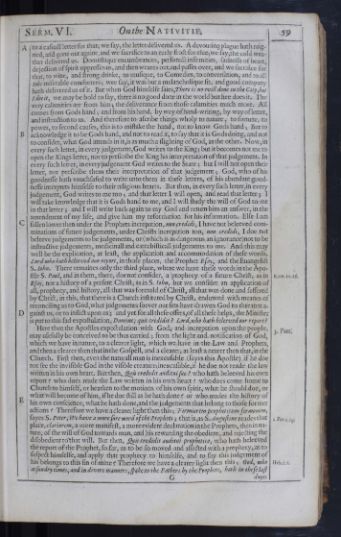 59On the Nativitie.
Serm. VI.
to a casuall letter for that; we say, the letter delivered us. A devouring plague hath raig-
59On the Nativitie.
Serm. VI.
to a casuall letter for that; we say, the letter delivered us. A devouring plague hath raig-ned, and gone out againe, and we sacrifice to an early frost for that; we say, the cold wea-
ther delivered us. Domestique encumbrances, personall infirmities, sadnesse of heart,
dejection of spirit oppresses us, and then weares out, and passes over, and we sacrifice for
that, to wine, and strong drinke, to musique, to Comedies, to conversation, and to all
Iobs miserable comforters; wee say, it was but a melancholique fit, and good company
hath delivered us of it. But when God himselfe saies, There is no evill done in the City, but
I doe it, we may be bold to say, there is no good done in the world but hee does it. The
very calamities are from him; the deliverance from those calamities much more. All
comes from Gods hand; and from his hand, by way of hand-writing, by way of letter,
and instruction to us. And therefore to ascribe things wholy to nature, to fortune, to
power, to second causes, this is to mistake the hand, not to know Gods hand; But to
acknowledge it to be Gods hand, and not to read it, to say that it is Gods doing, and not
to consider, what God intends in it, is as much a slighting of God, as the other. Now, in
every such letter, in every judgement, God writes to the King; but it becomes not me to
open the Kings letter, nor to prescribe the King his interpretation of that judgement. In
every such letter, in every judgement God writes to the State; but I will not open their
letter, nor prescribe them their interpretation of that judgement; God, who of his
goodnesse hath vouchsafed to write unto them in these letters, of his abundant good-
nesse interprets himselfe to their religious hearts. But then, in every such letter in every
judgement, God writes to me too; and that letter I will open, and read that letter; I
will take knowledge that it is Gods hand to me, and I will study the will of God to me
in that letter; and I will write back again to my God and return him an answer, in the
amendment of my life, and give him my reformation for his information. Else I am
fallen lower then under the Prophets increpation, non credidi, I have not beleeved com-
minations of future judgements, under Christs increpation too, non credidi, I doe not
beleeve judgements to be judgements, or (which is as dangerous an ignorance) not to be
instructive judgements, medicinall and catechisticall judgements to me. And this may
well be the explication, at least, the application and accommodation of these words,
Lord who hath beleeved our report, in those places, the Prophet Esay, and the Euangelist
S. Iohn. There remaines only the third place, where we have these words in the Apo-
stle S. Paul, and in them, there, doe not consider, a prophecy of a future Christ, Rom. 10.16. as in
Esay, nor a history of a present Christ, as in S. Iohn, but we consider an application of
all, prophecy, and history, all that was foretold of Christ, all that was done and suffered
by Christ, in this, that there is a Church instituted by Christ, endowed with meanes of
reconciling us to God, what judgements soever our sins have drawen God to threaten a-
gainst us, or to inflict upon us; and yet for all these offers, of all these helps, the Minister
is put to this sad expostulation, Domine, quis credidit? Lord, who hath beleeved our report?
Here then the Apostles expostulation with God, and increpation upon the people, 3. Part.
may usefully be conceived to be thus carried; from the light and notification of God,
which we have in nature, to a clearer light, which we have in the Law and Prophets,
and then a clearer then that in the Gospell, and a clearer, at least a nearer then that, in the
Church. First then, even the naturall man is inexcusable (sayes this Apostle) if he doe
not see the invisible God in the visible creature; inexcusable, if he doe not reade the law
written in his own heart. But then, Quis credidit auditui suo? who hath beleeved his own
report? who does reade the Law written in his own heart? who does come home to
Church to himself, or hearken to the motions of his own spirit, what he should doe, or
what will become of him, if he doe still as he hath done? or who reades the history of
his own conscience, what he hath done, and the judgements that belong to those former
actions? Therefore we have a clearer light then this; Firmiorem propheticum sermonem,
sayes S. Peter, We have a more sure word of the Prophets; that is, 2 Pet. 1.19. as S. Augustine reades that
place, clariorem, a more manifest, a more evident declaration in the Prophets, then in na-
ture, of the will of God towards man, and his rewarding the obedient, and rejecting the
disobedient to that will. But then, Quis credidit auditui prophetico, who hath beleeved
the report of the Prophet, so far, as to be so moved and affected with a prophecy, as to
suspect himselfe, and apply that prophecy to himselfe, and to say this judgement of
his belongs to this sin of mine? Therefore we have a clearer light then this; Heb. 1.1. God, who
at sundry times, and in divers manners, spake to the Fathers by the Prophets, hath in these last G dayes
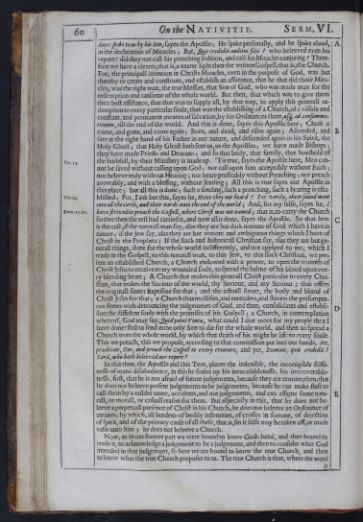 60On the Nativitie.
Serm. VI.
dayes spoke to us by his Son, sayes the Apostle; He spake personally, and he spake aloud,
60On the Nativitie.
Serm. VI.
dayes spoke to us by his Son, sayes the Apostle; He spake personally, and he spake aloud,
in the declaration of Miracles; But, Quis credidit auditui filii? who beleeved even his
report? did they not call his preaching sedition, and call his Miracles conjuring? There-
fore we have a clearer, that is, a nearer light then the written Gospell, that is, the Church.
For, the principall intention in Christs Miracles, even in the purpose of God, was but
thereby to create and constitute, and establish an assurance, that he that did those Mira-
cles, was the right man, the true Messias, that Son of God, who was made man for the
redemption and ransome of the whole world. But then, that which was to give them
their best assistance, that that was to supply all, by that way, to apply this generall re-
demption to every particular soule, that was the establishing of a Church, of a visible and
constant, and permanent meanes of salvation, by his Ordinances there, us ad consumma-
tionem, till the end of the world. And this is done, sayes this Apostle here; Christ is
come, and gone, and come again; Born, and dead, and risen again; Ascended, and
sate at the right hand of his Father in our nature, and descended again in his Spirit, the
Holy Ghost; that Holy Ghost hath sent us, us the Apostles; we have made Bishops;
they have made Priests and Deacons; and so that body, that family, that houshold of
the faithfull, Ver. 14. by their Ministery is made up. 'Tis true, sayes the Apostle here, Men can-
not be saved without calling upon God; nor call upon him acceptably without Faith;
nor beleeve truly without Hearing; nor heare profitably without Preaching; nor preach
avowably, and with a blessing, without sending; All this is true sayes our Apostle in
this place; but all this is done; such a sending, such a preaching, such a hearing is esta-
blished; For, Ver. 19. I ask but this, sayes he, Have they not heard? Yes verily, their sound went
into all the earth, and their words unto the end of the world; And, for my selfe, sayes he, I
have strived to preach the Gospell,Rom. 15.20. where Christ was not named; that is, to carry the Church
farther then the rest had carried it, and now all is done, sayes the Apostle. So that here
is the case, if the naturall man say, alas they are but dark notions of God which I have in
nature; if the Jew say, alas they are but remote and ambiguous things which I have of
Christ in the Prophets; If the slack and historicall Christian say, alas they are but ge-
nerall things, done for the whole world indifferently, and not applyed to me, which I
reade in the Gospell, to this naturall man, to this Jew, to this slack Christian, we pre-
sent an established Church, a Church endowed with a power, to open the wounds of
Christ Jesus to receive every wounded soule, to spread the balme of his blood upon eve-
ry bleeding heart; A Church that makes this generall Christ particular to every Chri-
stian, that makes the Saviour of the world, thy Saviour, and my Saviour; that offers
the originall sinner Baptisme for that; and the actuall sinner, the body and blood of
Christ Jesus for that; a Church that mollifies, and entenders, and shivers the presumptu-
ous sinner with denouncing the judgements of God, and then, consolidates and establi-
shes the diffident soule with the promises of his Gospell; a Church, in contemplation
whereof, God may say, Quid potui Vineæ, what could I doe more for my people then I
have done? first to send mine only Son to die for the whole world, and then to spread a
Church over the whole world, by which that death of his might be life to every soule.
This we preach, this we propose, according to that commission put into our hands, Ite,
prædicate, Goe, and preach the Gospell to every creature, and yet, Domine, quis credidit?
Lord, who hath beleeved our report?
In this then, the Apostle and this Text, places the inflexible, the incorrigible stiffe-
nesse of mans disobedience, in this he seales up his inexcusablenesse, his irrecoverable-
nesse, first, that he is not afraid of future judgements, because they are remote; then, that
he does not beleeve present judgements to be judgements, because he can make shift to
call them by a milder name, accidents, and not judgements, and can assigne some natu-
rall, or morall, or casuall reason for them. But especially in this, that he does not be-
leeve a perpetuall presence of Christ in his Church, he does not beleeve an Ordinance of
meanes, by which, all burdens of bodily infirmities, of crosses in fortune, of dejection
of spirit, and of the primary cause of all these, that is, sin it selfe may be taken off, or made
easie unto him; he does not beleeve a Church.
Now, as in our former part we were bound to know Gods hand, and then bound to
reade it, to acknowledge a judgement to be a judgement, and then to consider what God
intended in that judgement, so here we are bound to know the true Church, and then
to know what the true Church proposes to us. The true Church is that, where the word is
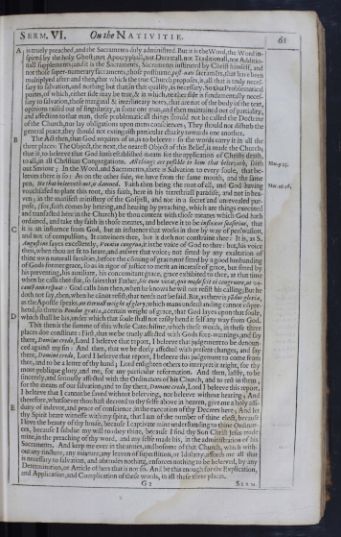 61On the Nativitie.
Serm. VI.is truely preached, and the Sacraments duly administred. But it is the Word, the Word in-
61On the Nativitie.
Serm. VI.is truely preached, and the Sacraments duly administred. But it is the Word, the Word in-spired by the holy Ghost; not Apocryphall, not Decretall, not Traditionall, not Additio-
nall supplements; and it is the Sacraments, Sacraments instituted by Christ himself, and
not those super-numerary sacraments, those posthume, post-nati sacramēts, that have been
multiplyed after: and then, that which the true Church proposes, is, all that is truly neces-
sary to salvation, and nothing but that, in that quality, as necessary. So that Problematical
points, of which, either side may be true, & in which, neither side is fundamentally neces-
sary to salvation, those marginal & interlineary notes, that are not of the body of the text,
opinions raised out of singularity, in some one man, and then maintained out of partiality,
and affection to that man, these problematicall things should not be called the Doctrine
of the Church, nor lay obligations upon mens consciences; They should not disturb the
general peace, they should not extinguish particular charity towards one another.
The Act then, that God requires of us, is to beleeve: so the words carry it in all the
three places: The Object, the next, the nearest Object of this Belief, is made the Church;
that is, to beleeve that God hath established means for the application of Christs death,
to all, in all Christian Congregations. All things are possible to him that beleeveth,Mar. 9 23.Mar. 9.23. saith
our Saviour; In the Word, and Sacraments, there is Salvation to every soule, that be-
leeves there is so: As on the other side, we have from the same mouth, and the same
pen, He that beleeveth not, is damned. Faith then being the root of all, Mar. 16.16. and God having
vouchsafed to plant this root, this faith, here in his terrestriall paradise, and not in hea-
ven; in the manifest ministery of the Gospell, and not in a secret and unrevealed pur-
pose, (for, faith comes by hearing, and hearing by preaching, which are things executed
and transacted here in the Church) be thou content with those meanes which God hath
ordained, and take thy faith in those meanes, and beleeve it to be influxus suasorius, that
it is an influence from God, but an influence that works in thee by way of perswasion,
and not of compulsion; It convinces thee, but it doth not constraine thee: It is, as S.
Augustine sayes excellently, Vocatio congrua, it is the voice of God to thee: but, his voice
then, when thou art fit to heare, and answer that voice; not fitted by any exaltation of
thine own naturall faculties, before the cōming of grace; nor fitted by a good husbanding
of Gods former grace, so as in rigor of justice to merit an increase of grace, but fitted by
his preventing, his auxiliant, his concomitant grace, grace exhibited to thee, at that time
when he calls thee: for, so saies that Father, Sic eum vocat, quo modo seit ei congruere, ut vo-
cantē non respuat: God calls him then, when he knows he wil not resist his calling; But he
doth not say, then, when he cānot resist; that needs not be said. But, as there is pōdus gloriæ,
as the Apostle speaks, an eternall weight of glory, which mans understanding cannot cōpre-
hend; so there is Pondus gratiæ, a certain weight of grace, that God layes upon that soule,
which shall be his, under which that soule shall not easily bend it self any way from God.
This then is the summe of this whole Catechisme, which these words, in these three
places doe constitute: First, that we be truely affected with Gods fore-warnings, and say
there, Domine credo, Lord I beleeve that report, I beleeve that judgement to be denoun-
ced against my sin: And then, that we be duely affected with present changes, and say
there, Domine credo, Lord I beleeve that report, I beleeve this judgement to come from
thee, and to be a letter of thy hand; Lord enlighten others to interpret it aright, for thy
more publique glory, and me, for my particular reformation. And then, lastly, to be
sincerely, and seriously affected with the Ordinances of his Church, and to rest in them,
for the means of our salvation; and to say there, Domine credo, Lord I beleeve this report,
I beleeve that I cannot be saved without beleeving, nor beleeve without hearing. And
therefore, whatsoever thou hast decreed to thy selfe above in heaven, give me a holy assi-
duity of indevor, and peace of conscience, in the execution of thy Decrees here; And let
thy Spirit beare witnesse with my spirit, that I am of the number of thine elect, because
I love the beauty of thy house, because I captivate mine understanding to thine Ordinan-
ces, because I subdue my wil to obey thine, because I find thy Son Christ Jesus made
mine, in the preaching of thy word, and my selfe made his, in the administration of his
Sacraments. And keep me ever in the armes, and bosome of that Church, which with-
out any tincture, any mixture, any leaven of superstition, or Idolatry, affords me all that
is necessary to salvation, and obtrudes nothing, enforces nothing to be beleeved, by any
Determination, or Article of hers that is not so. And be this enough for the Explication,
and Application, and Complication of these words, in all these three places. G2 Serm
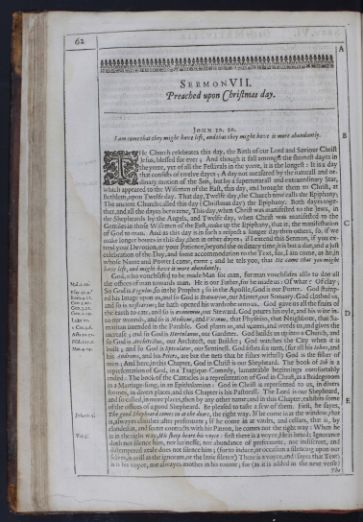 62
62
Sermon VII.
Preached upon Christmas day.
John 10. 10.
I am come that they might have life, and that they might have it more abundantly.
THeThe Church celebrates this day, the Birth of our Lord and Saviour Christ
Jesus, blessed for ever; And though it fall amongst the shortest dayes in
the yeere, yet of all the Festivals in the yeere, it is the longest: It is a day
that consists of twelve dayes; A day not measured by the naturall and or-
dinary motion of the Sun, but by a supernaturall and extraordinary Star,
which appeared to the Wisemen of the East, this day, and brought them to Christ, at
Bethlem, upon Twelfe day. That day, Twelfe day, the Church now calls the Epiphany;
The ancient Church called this day (Christmas day) the Epiphany. Both dayes toge-
ther, and all the dayes betweene, This day, when Christ was manifested to the Jews, in
the Shepheards by the Angels, and Twelfe day, when Christ was manifested to the
Gentiles in those Wisemen of the East, make up the Epiphany, that is, the manifestation
of God to man. And as this day is in such a respect a longer day then others, so, if we
make longer houres in this day, then in other dayes; if I extend this Sermon, if you ex-
tend your Devotion, or your Patience, beyond the ordinary time, it is but a due, and a just
celebration of the Day, and some accommodation to the Text, for, I am come, as he, in
whose Name and Power I came, came; and he tels you, that He came that you might
have life, and might have it more abundantly.
God, who vouchsafed to be made Man for man, for man vouchsafes also to doe all
the offices of man towards man. He is our Father, for he made us: Of what? Of clay; Mal. 2.10.
So God is Figulus, so in the Prophet; so in the Apostle, God is our Potter. God Esay 45.9. stamp-
ed his Image upon us, and so God is Statuarius, our Minter, our Statuary. God clothed us, Rom. 9.21.
and so is vestiarius; he hath opened his wardrobe unto us. God gave us all the fruits of Gen. 1.27.
the earth to eate, and so is œconomus, our Steward. God poures his oyle, and his wine Gen. 3.21. in-
to our wounds, and so is Medicus, and Vicinus, that Physitian, that Neighbour, that Gen. 1.29. Sa-
maritan intended in the Parable. God plants us, and waters, and weeds us, and gives the Luke 10.
increase; and so God is Hortulanus, our Gardiner. God builds us up into a Church, and 1 Cor. 3.6.
so God is Architectus, our Architect, our Builder; God watches the City when it is Acts 20.32.
built; and so God is Speculator, our Sentinell. God fishes for men, (for all his Iohns, and Psal. 127.1.
his Andrews, and his Peters, are but the nets that he fishes withall) God is the fisher of Mat. 4.19.
men; And here, in this Chapter, God in Christ is our Shepheard. The book of Iob is a
representation of God, in a Tragique-Comedy, lamentable beginnings comfortably
ended: The book of the Canticles is a representation of God in Christ, as a Bridegroom
in a Marriage-song, in an Epithalamion: God in Christ is represented to us, in divers
formes, in divers places, and this Chapter is his Pastorall. The Lord is our Shepheard,
and so called, in more places, then by any other name; and in this Chapter, exhibits some
of the offices of a good Shepheard. Be pleased to taste a few of them. First, he sayes,
The good Shepheard comes in at the doore, Joh. 10.1. the right way. If he come in at the window, that
is, alwayes clamber after preferment; If he come in at vaults, and cellars, that is, by
clandestin, and secret contracts with his Patron, he comes not the right way: When he
is in the right way, Ver. 3. His sheep heare his voyce: first there is a voyce, He is heard; Ignorance
doth not silence him, nor lazinesse, nor abundance of preferment; nor indiscreet, and
distempered zeale does not silence him; (for to induce, or occasion a silencing upon our
selves, is as ill as the ignorant, or the lazie silence) There is a voyce, and (sayes that Text)
isit is his voyce, not alwayes another in his roome; for (as it is added in the next verse) The
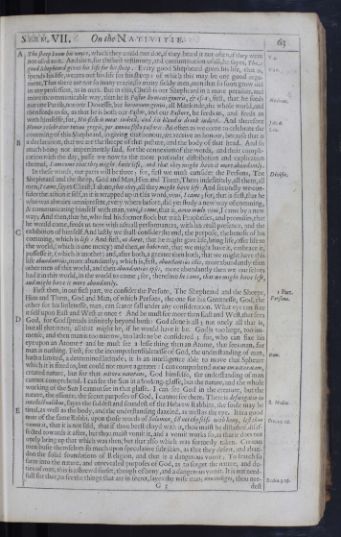 Serm. VII.On the NATIVITIE.63
Serm. VII.On the NATIVITIE.63
The sheep know his voyce, which they could not doe, if they heard it not often, if they were V.4.
not used to it. And then, for the best testimony, and consummation of all, he sayes, The
good Shepheard gives his life for his sheep. Every good Shepheard gives his life, that is, V.11.
spends his life, weares out his life for his sheep: of which this may be one good argu-
ment, That there are not so many crazie, so many sickly men, men that so soon grow old
in any profession, as in ours. But in this, Christ is our Shepheard in a more peculiar, and
more incommunicable way, that he is Pastor humani generis, & esca; first, that he feeds Maximus.
not one Parish, nor one Diocesse, but humanum genus, all Mankinde, the whole world, and
then feeds us so, as that he is both our Pastor, and our Pasture, he feeds us, and feeds us
with himselfe, for, His flesh is meat indeed, and his bloud is drink indeed. And therefore Joh. 6.
Honor celebratur totius gregis, per annua festa pastoris: As often as we come to celebrate the Leo.
comming of this Shepheard, in giving that honour, we receive an honour, because that is
a declaration, that we are the sheepe of that pasture, and the body of that head. And so
much being not impertinently said, for the connexion of the words, and their compli-
cation with the day, passe we now to the more particular distribution and explication
thereof, I am come that they might have life, and that they might have it more abundantly.
In these words, our parts will be three; for, first we must consider the Persons, The Divisio.
Shepheard and the sheep, God and Man, Him and Them, Them indefinitely, all them, all
men, I came, sayes Christ, I alone, that they, all they might have life: And secondly we con-
sider the action it self; as it is wrapped up in this word, veni, I came; for, that is first, that he
who was alwaies omnipresent, every where before, did yet study a new way of comming,
& communicating himself with man, veni, I came, that is, novo modo veni, I came by a new
way; And then, that he, who fed his former flock but with Prophesies, and promises, that
he would come, feeds us now with actuall performances, with his reall presence, and the
exhibition of himself. And lastly we shall consider the end, the purpose, the benefit of his
comming, which is life: And first, ut daret, that he might give life, bring life, offer life to
the world, (which is one mercy) and then, ut haberent, that we might have it, embrace it,
possesse it, (which is another) and, after both, a greater then both, that we might have this
life abundantiùs, more abundantly; which is, first, abundantiùs illis, more abundantly then
other men of this world, and then abundantiùs ipsis, more abundantly then we our selves
had it in this world, in the world to come; for, therefore he came, that we might have life,
and might have it more abundantly.
First then, in our first part, we consider the Persons, The Shepheard and the Sheepe, 1 Part.
Him and Them, God and Man; of which Persons, the one for his Greatnesse, God, the Personæ.
other for his littlenesse, man, can scarce fall under any consideration. What eye can fixe
it self upon East and West at once? And he must see more then East and West, that sees
God, for God spreads infinitely beyond both: God alone is all; not onely all that is,
but all that is not, all that might be, if he would have it be. God is too large, too im-
mense, and then man is too narrow, too little to be considered; for, who can fixe his
eye upon an Atome? and he must see a lesse thing then an Atome, that sees man, for
man is nothing. First, for the incomprehensiblenesse of God, the understanding of man, Deus.
hath a limited, a determined latitude; it is an intelligence able to move that Spheare
which it is fixed to, but could not move a greater: I can comprehend naturam naturatam,
created nature, but for that natura naturans, God himselfe, the understanding of man
cannot comprehend. I can see the Sun in a looking-glasse, but the nature, and the whole
working of the Sun I cannot see in that glasse. I can see God in the creature, but the
nature, the essence, the secret purposes of God, I cannot see there. There is defatigatio in
intellectualibus, sayes the saddest and soundest of the Hebrew Rabbins, the soule may be R. Moses.
tired, as well as the body, and the understanding dazeled, as well as the eye. It is a good
note of the same Rabbi, upon those words of Solomon, fill not thy selfe with hony, lest thou Pro. 25.16.
vomit it, that it is not said, that if thou beest cloyd with it, thou maist be distasted, disaf-
fected towards it after, but thou maist vomit it, and a vomit works so, as that it does not
onely bring up that which was then, but that also which was formerly taken. Curious
men busie themselves so much upon speculative subtilties, as that they desert, and aban-
don the solid foundations of Religion, and that is a dangerous vomit; To search so
farre into the nature, and unrevealed purposes of God, as to forget the nature, and du-
ties of man, this is a shrewd surfet, though of hony, and a dangerous vomit. It is not need-
full for thee, to see the things that are in secret, sayes the wife man; nonindiges, thou neeEcclus. 3.23.
G3dest
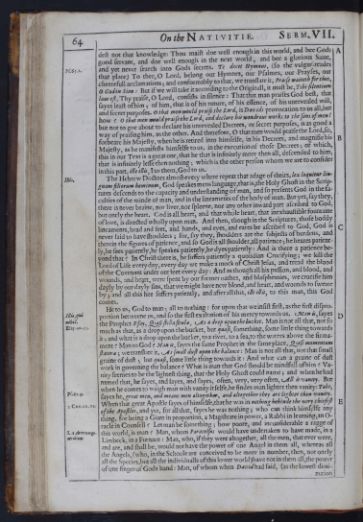 Serm. VII.On the NATIVITIE.64
dest not that knowledge: Thou maist doe well enough in this world, and bee Gods
Serm. VII.On the NATIVITIE.64
dest not that knowledge: Thou maist doe well enough in this world, and bee Gods
good servant, and doe well enough in the next world, and bee a glorious Saint,
and yet never search into Gods secrets. Te decet Hymnus, (so the vulgar reades Ps. 65.1.
that place) To thee, O Lord, belong our Hymnes, our Psalmes, our Prayses, our
cheerefull acclamations; and conformably to that, we translate it, Praise waiteth for thee,
O God in Sion: But if we will take it according to the Originall, it must be, Tibi silentium
laus est, Thy praise, O Lord, consists in silence: That that man praises God best, that
sayes least of him; of him, that is of his nature, of his essence, of his unrevealed will,
and secret purposes. O that men would praise the Lord, is Davids provocation to us all, but
how? O that men would praise the Lord, and declare his wondrous works to the sons of men!
but not to goe about to declare his unrevealed Decrees, or secret purposes, is as good a
way of praising him, as the other. And therefore, O that men would praise the Lord, so,
forbeare his Majesty, when he is retired into himselfe, in his Decrees, and magnifie his
Majesty, as he manifests himselfe to us, in the execution of those Decrees; of which,
this in our Text is a great one, that he that is infinitely more then all, descended to him,
that is infinitely lesse then nothing; which is the other person whom we are to consider
in this part, ille illis, I to them, God to us.
The Hebrew Doctors almost every where repeat that adage of theirs, Illis. lex loquitur lin-
guam filiorum hominum, God speakes mens language, that is, the Holy Ghost in the Scrip-
tures descends to the capacity and understanding of man, and so presents God in the fa-
culties of the minde of man, and in the lineaments of the body of man. But yet, say they,
there is never braine, nor liver, nor spleene, nor any other inward part ascribed to God,
but onely the heart. God is all heart, and that whole heart, that inexhaustible fountaine
of love, is directed wholly upon man. And then, though in the Scriptures, those bodily
lineaments, head and feet, and hands, and eyes, and eares be ascribed to God, God is
never said to have shoulders; for, say they, shoulders are the subjects of burdens, and
therein the figures of patience, and so God is all shoulder, all patience; he heares patient-
ly, he sees patiently, he speakes patiently, he dyes patiently: And is there a patience be-
yond that? In Christ there is, he suffers patiently a quotidian Crucifying; we kill the
Lord of Life every day, every day we make a mock of Christ Jesus, and tread the blood
of the Covenant under our feet every day: And as though all his passion, and blood, and
wounds, and heart, were spent by our former oathes, and blasphemies, we crucifie him
dayly by our dayly sins, that we might have new blood, and heart, and wounds to sweare
by; and all this hee suffers patiently, and after all this, ille illis, to this man, this God
comes.
He to us, God to man; all to nothing: for upon that we insist first, as the first dispro-
portion betweene us, and so the first exaltation of his mercy towards us. Man is, sayes Illis, qui
nihil
the Prophet Esay, Quasi stilla situlæ, As a drop upon the bucket. Man is not all that, not so
much as that, as a drop upon the bucket, but quasi, something, some little thing towards Esay. 40.15.
it; and what is a drop upon the bucket, to a river, to a sea, to the waters above the firma-
ment? Man to God? Man is, sayes the same Prophet in the same place, Quasi momenntum
stateræ; we translate it, As small dust upon the balance: Man is not all that, not that small
graine of dust; but quasi, some little thing towards it: And what can a graine of dust
work in governing the balance? What is man that God should be mindfull of him? Va-
nity seemes to be the lightest thing, that the Holy Ghost could name; and when he had
named that, he sayes, and sayes, and sayes, often, very, very often, All is vanity. But
when he comes to waigh man with vanity it selfe, he findes man lighter then vanity: Take,
sayes he, great men, and meane men altogether, and altogether they are lighter then vanity. Ps. 62.9.
When that great Apostle sayes of himselfe, that he was in nothing behinde the very chiefest
of the Apostles, and yet, for all that, sayes he was nothing; who can think himselfe any 2 Cor. 12.11.
thing, for being a Giant in proportion, a Magistrate in power, a Rabbi in learning, an O-
racle in Counsell? Let man be something; how poore, and inconsiderable a ragge of
this world, is man? Man, whom Paracelsus would have undertaken to have made, in a L. 1. de rerum ge-
neratione.
Limbeck, in a Furnace: Man, who, if they were altogether, all the men, that ever were,
and are, and shall be, would not have the power of one Angel in them all, whereas all
the Angels, (who, in the Schoole are conceived to be more in number, then, not onely
all the Species, but all the individualls of this lower world) have not in them all, the power
of one finger of Gods hand: Man, of whom when David had said, (as the lowest dimi-
nution
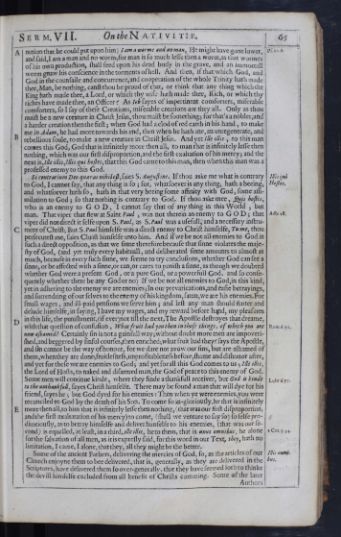 SERM. VII.
On the Nativitie.
65
nution that he could put upon him) I am a worme and no man, He might have gone lower, Ps. 22.6.
SERM. VII.
On the Nativitie.
65
nution that he could put upon him) I am a worme and no man, He might have gone lower, Ps. 22.6.
and said, I am a man and no worm; for man is so much lesse then a worm, as that wormes
of his own production, shall feed upon his dead body in the grave, and an immortall
worm gnaw his conscience in the torments of hell. And then, if that which God, and
God in the counsaile and concurrence, and cooperation of the whole Trinity hath made
thee, Man, be nothing, canst thou be proud of that, or think that any thing which the
King hath made thee, a Lord, or which thy wife hath made thee, Rich, or which thy
riches have made thee, an Officer? As Iob sayes of impertinent comforters, miserable
comforters, so I say of these Creations, miserable creations are they all. Only as thou
maist be a new creature in Christ Jesus, thou maist be something; for that's a nobler, and
a harder creation then the first; when God had a clod of red earth in his hand, to make
me in Adam, he had more towards his end, then when he hath me, an unregenerate, and
rebellious soule, to make a new creature in Christ Jesus. And yet Ille illis, to this man
comes this God, God that is infinitely more then all, to man that is infinitely lesse then
nothing, which was our first disproportion, and the first exaltation of his mercy; and the
next is, Ille illis, Illis qui hostes, that this God came to this man, then when this man was a
professed enemy to this God.
Si contrarium Deo quæras nihilest, saies S. Augustine. If thou aske me what is contraryIllis qui
to God, I cannot say, that any thing is so; for, whatsoever is any thing, hath a beeing, Hostes.
and whatsoever hath so, hath in that very beeing some affinity with God, some assi-
milation to God; so that nothing is contrary to God. If thou aske mee, Quis hostis,
who is an enemy to GOD, I cannot say that of any thing in this World, but
man. That viper that flew at Saint Paul, was not therein an enemy to GOD;Acts 28. that
viper did not direct it selfe upon S. Paul, as S. Paul was a usefull, and a necessary instru-
ment of Christ; But S. Paul himselfe was a direct enemy to Christ himselfe, Tu me thou,
persecutest me, saies Christ himselfe unto him. And if we be not all enemies to God in
such a direct opposition, as that we sinne therefore because that sinne violates the maje-
sty of God, (and yet truly every habituall, and deliberated sinne amounts to almost as
much, because in every such sinne, we seeme to try conclusions, whether God can see a
sinne, or be affected with a sinne, or can, or cares to punish a sinne, as though we doubted
whether God were a present God, or a pure God, or a powerfull God, and so conse-
quently whether there be any God or no) If we be not all enemies to God, in this kind,
yet in adhering to the enemy we are enemies; In our prevarications, and easie betrayings,
and surrendring of our selves to the enemy of his kingdom, satan, we are his enemies. For
small wages, and ill-paid pensions we serve him; and lest any man should flatter and
delude himselfe, in saying, I have my wages, and my reward before hand, my pleasures
in this life, the punishment, (if ever) not till the next, The Apostle destroyes that dreame,
with that question of confusion, What fruit had you then in those things, of which you are Rom 6.21.
now ashamed? Certainly sin is not a gainfull way; without doubt more men are impoveri-
shed, and beggered by sinful courses, then enriched; what fruit had they? says the Apostle,
and sin cannot be the way of honour, for we dare not avow our sins, but are ashamed of
them, when they are done; fruitlesness, unprofitableness before, shame and dishonor after,
and yet for these we are enemies to God; and yet for all this God comes to us; Ille illis,
the Lord of Hosts, to naked and disarmed man, the God of peace to this enemy of God.
Some men will continue kinde, where they finde a thankfull receiver, but God is kindeLuke 6.35.
to the unthankfull, sayes Christ himselfe. There may be found a man that will dye for his
friend, sayes he; but God dyed for his enemies: Then when ye were enemies, you were
reconciled to God by the death of his Son. To come so in-gloriously, he that is infinitely
more then all, to him that is infinitely lesse then nothing, (that was our first disproportion,
and the first axaltatation of his mercy) to come, (shall we venture to say so) so selfe pro-
ditoriously, as to betray himselfe and deliver himselfe to his enemies, (that was our se-
cond) is equalled, at least, in a third, ille illis, he to them, that is unus omnibus, he alone 2 Cor. 5.14.
for the salvation of all men, as it is expresly said, for this word in our Text, they, hath no
limitation, I came, I alone, that they, all they might be the better.
Some of the ancient Fathers, delivering the mercies of God, so, as the articles of our Illis omni-
bus.
Church enjoyne them to bee delivered, that is, generally, as they are delivered in the
Scriptures, have delivered them so over-generally, that they have seemed loth to thinke
the devill himselfe excluded from all benefit of Christs comming. Some of the later Authors
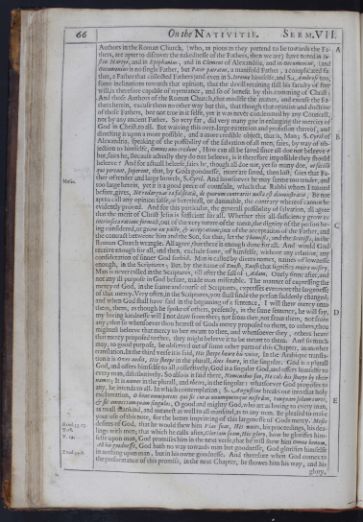 SERM. VII.On the NATIVITIE.66
Authors in the Roman Church, (who, as pious as they pretend to be towards the Fa-
SERM. VII.On the NATIVITIE.66
Authors in the Roman Church, (who, as pious as they pretend to be towards the Fa-thers, are apter to discover the nakednesse of the Fathers, then we are) have noted in Iu-
stin Martyr, and in Epiphanius, and in Clement of Alexandria, and in Oecumenius, (and
Oecumenius is no single Father, but Pater patratus, a manifold Father, a complicated fa-
ther, a Father that collected Fathers) and even in S. Ierome himselfe, and S. Ambrose too,
some inclinations towards that opinion, that the devill retaining still his faculty of free
will, is therefore capable of repentance, and so of benefit by this comming of Christ;
And those Authors of the Roman Church, that modifie the matter, and excuse the Fa-
thers herein, excuse them no other way but this, that though that opinion and doctrine
of those Fathers, bee not true in it selfe, yet it was never condemned by any Councell,
nor by any ancient Father. So very far, did very many goe in enlarging the mercies of
God in Christ, to all. But waiving this over-large extention and profusion thereof, and
directing it upon a more possible, and a more credible object, that is, Man; S. Cyril of
Alexandria, speaking of the possibility of the salvation of all men, saies, by way of ob-
jection to himselfe, Omnes non credunt, How can all be saved since all doe not beleeve?
but, saies he, Because actually they do not beleeve, is it therefore impossible they should
beleeve? And for actuall beleefe, saies he, though all doe not, yet so many doe, ut facilè
qui pereant, superent, that, by Gods goodnesse, more are saved, then lost, saies that Fa-
ther of tender and large bowels, S. Cyril. And howsoever he may seeme too tender, and Moses.
too large herein, yet it is a good peece of counsaile, which that Rabbi whom I named
before, gives, Ne redarguas ea falsitatis, de quorum contrariis nulla est demonstratio, Be not
apt to call any opinion false, or hereticall, or damnable, the contrary whereof cannot be
evidently proved. And for this particular, the generall possibility of salvation, all agree
that the merit of Christ Jesus is sufficient for all. Whether this all-sufficiency grow ex
intrinseca ratione formali, out of the very nature of the merit, the dignity of the person be-
ing considered, or grow ex pacto, & acceptatione, out of the acceptation of the Father, and
the contract betweene him and the Son, for that, let the Thomists, and the Scotists, in the
Roman Church wrangle. All agree, that there is enough done for all. And would God
receive enough for all, and then, exclude some, of himselfe, without any relation, any
consideration of sinne? God forbid. Man is called by divers names, names of lownesse
enough, in the Scriptures; But, by the name of Enosh, Enosh that signifies meere misery,
Man is never called in the Scriptures, till after the fall of Adam. Onely sinne after, and
not any ill purpose in God before, made man miserable. The manner of expressing the
mercy of God, in the frame and course of Scriptures, expresses evermore the largenesse
of that mercy. Very often, in the Scriptures, you shall finde the person suddenly changed;
and when God shall have said in the beginning of a sentence, I will shew mercy unto
them, them, as though he spoke of others, presently, in the same sentence, he will say,
my loving kindnesse will I not draw from thee; not from thee, not from them, not from
any; that so whensoever thou hearest of Gods mercy proposed to them, to others, thou
mightest beleeve that mercy to bee meant to thee, and whensoever they, others heare
that mercy proposed to thee, they might beleeve it to be meant to them. And so much
may, to good purpose, be observed out of some other parts of this Chapter, in another
translation. In the third verse it is said, His sheepe heare his voice, In the Arabique transla-
tion it is Oves audit, His sheepe in the plurall, does heare, in the singular. God is a plurall
God, and offers himselfe to all, collectively; God is a singular God, and offers himselfe to
every man, distributively. So also is it said there, Nominibus suo, He cals his sheepe by their
names; It is names in the plurall, and theirs, in the singular: whatsoever God proposes to
any, he intends to all. In which contemplation, S. Augustine breaks out into that holy
exclamation, O bone omnipotens qui sic cur as unumquemque nostrûm, tanquam solum cures,
& sic omnes tamquam singulos, O good and mighty God, who art as loving to every man,
as to all mankind, and meanest as well to all mankind, as to any man. Be pleased to make
your use of this note, for the better imprinting of this largenesse of Gods mercy. Moses
desires of God, that he would shew him Vias suas, His waies, his proceedings, his Exod. 33.13. dea-
lings with men; that which he calls after, Gloriam suam, His glory, how he glorifies V. 18. him-
selfe upon man, God promises him in the next verse, that he will shew him Omne bonum, V. 19.
All his goodnesse, God hath no way towards man but goodnesse, God glorifies himselfe
in nothing upon man, but in his owne goodnesse. And therefore when God comes to Exod. 34.6.
the performance of this promise, in the next Chapter, he showes him his way, and his glory,
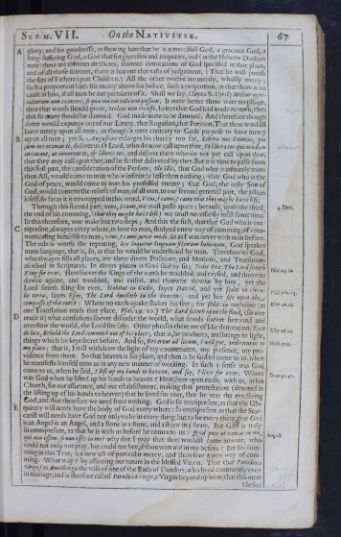 SERM. VII.On the NATIVITIE.67
glory, and his goodnesse, in shewing him that he is a mercifull God, a gracious God, a
SERM. VII.On the NATIVITIE.67
glory, and his goodnesse, in shewing him that he is a mercifull God, a gracious God, a
long-suffering God, a God that forgives sins and iniquities, and (as the Hebrew Doctors
note) there are thirteen attributes, thirteen denotations of God specified in that place,
and of all those thirteen, there is but one that tasts of judgement, (That he will punish
the sins of Fathers upon Children.) All the other twelve are meerly, wholly mercy;
such a proportion hath his mercy above his justice, such a proportion, as that there is no
cause in him, if all men be not partakers of it. Shall we say, (sayes S. Cyril) Melius agri-
culturam non exerceri, si quæ nocent tolli non possunt, It were better there were no tillage,
then that weeds should grow, Melius non creasse, better that God had made no men, then
that so many should be damned. God made none to be damned; And therefore though
some would expunge out of our Litany, that Rogation, that Petition, That thou wouldst
have mercy upon all men; as though it were contrary to Gods purpose to have mercy
upon all men; yet S. Augustine enlarges his charity too far, Libera nos Domine, qui
jam invocamus te, deliver us O Lord, who do now call upon thee, Et libera eos qui nondum
invocant, ut invocent te, & liberes eos, and deliver them who do not yet call upon thee,
that they may call upon thee, and be farther delivered by thee. But it is time to passe from
this first part, the consideration of the Persons, Ille Illis, that God who is infinitely more
then All, would come to man who is infinitely lesse then nothing; that God who is the
God of peace, would come to man his professed enemy; that God, the only Son of
God, would come to the reliefe of man, of all men, to our second generall part, the action
it self, so far as it is enwrapped in this word, Veni, I came; I came that they might have life.
2 Part. Through this second part, veni, I came, we must passe apace; because, upon the third,
the end of his comming, (that they might have life) we must necessarily insist sometime.
In this therefore, wee make but two steps; And this the first, that that God who is om-
nipresent, alwayes every where, in love to man, studyed a new way of comming, of com-
municating himselfe to man; veni, I came, novo modo, so as I was never with man before.
The rule is worth the repeating, lex loquitur linguam filiorum hominum, God speakes
mans language, that is, so, as that he would be understood by man. Therefore to God,
who alwayes fills all places, are there divers Positions, and Motions, and Transitions
ascribed in Scriptures. In divers places is God said to sit; Sedet Rex, The Lord sitteth
King for ever. Howsoever the Kings of the earth be troubled, and raysed, and throwne Psal. 29.10.
downe againe, and troubled, and raised, and throwne downe by him, yet the
Lord sitteth King for ever. Habitat in Cœlis, sayes David, and yet sedet in Psal. 102.13. circu-
lis terræ, sayes Esay, The Lord dwelleth in the heavens, and yet hee sits upon the
compasse of this earth: Where no earth-quake shakes his seat; for sedet in confusione (asEsay 40.22.
one Translation reads that place, Psal. 29.10.) The Lord sitteth upon the flood, (so wee
reade it) what confusions soever disorder the world, what floods soever surround and
overflow the world, the Lord sits safe. Other phrases there are of like denotation. ExitEsay 26.21.
de loco, Behold the Lord commeth out of his place; that is, he produces, and brings to light,
things which he kept secret before. And so, Revertar ad locum, I will goe, and returne toHose. 5.15.
my place; that is, I will withdraw the light of my countenance, my presence, my pro-
vidence from them. So that heaven is his place, and then is he said to come to us, when
he manifests himself unto us in any new manner of working. In such a sense was God
come to us, when he said, I lift up my hands to heaven, and say, I live for ever. Where Deut. 32.40.
was God when he lifted up his hands to heaven? Here, here upon earth, with us, in his
Church, for our assurance, and our establishment, making that protestation (denoted in
the lifting up of his hands to heaven) that he lived for ever, that he was the everliving
God, and that therefore we need feare nothing. God is so omnipresent, as that the Ubi-
quitary will needs have the body of God every where: so omnipresent, as that the Stan-
carist will needs have God not only to be in every thing, but to be every thing, that God
is an Angel in an Angel, and a stone in a stone, and a straw in a straw. But God is truly
so omnipresent, as that he is with us before he comes to us: Quid peto ut venias in me, August.
qui non essem, si non esses in me? why doe I pray that thou wouldst come into me, who
could not only not pray, but could not bee, if thou wert not in me before? But his com-
ming in this Text, is a new act of particular mercy, and therefore a new way of com-
ming. What way? by assuming our nature in the blessed Virgin. That that Paradoxa
virgo, (as Amelberga the wife of one of the Earls of Flanders, who lived continently even
in mariage, and is therfore called Paradoxa virgo, a Virgin beyond opinion) that this most blessed
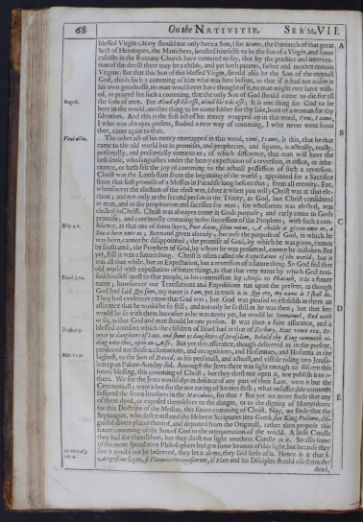 68
On the Nativitie.
Serm. VII.
blessed Virgin Mary should not only have a Son, (for Manes, the Patriarch of that great
68
On the Nativitie.
Serm. VII.
blessed Virgin Mary should not only have a Son, (for Manes, the Patriarch of that great
Sect of Heretiques, the Manichees, boasted himselfe to be the son of a Virgin, and some
casuists in the Romane Church have ventured to say, that by the practice and interven-
tion of the devill there may be a childe, and yet both parents, father and mother remain
Virgins) But that this Son of this blessed Virgin, should also be the Son of the eternall
God, this is such a comming of him who was here before, as that if it had not arisen in
his own goodnesse, no man would ever have thought of it, no man might ever have wish-
ed, or prayed for such a comming, that the only Son of God should come to die for all
the sons of men.August. For Aliud est hîc esse, aliud hîc tibi esse; It is one thing for God to be
here in the world, another thing to be come hither for thy sake, born of a woman for thy
salvation. And this is the first act of his mercy wrapped up in this word, Veni, I came,
I who was alwayes present, studied a new way of comming, I who never went from
thee, came again to thee.
The other act of his mercy enwrapped in this word, Veni actu. veni, I came, is this, that he that
came to the old world but in promises, and prophecies, and figures, is actually, really,
personally, and presentially come to us; of which difference, that man will have the
best sense, who languishes under the heavy expectation of a reversion, in office, or inhe-
ritance, or hath felt the joy of comming to the actuall possession of such a reversion.
Christ was the Lamb slain from the beginning of the world; appointed for a Sacrifice
from that first promise of a Messias in Paradise long before that; from all eternity. For,
whensoever the election of the elect was, (date it when you will) Christ was at that ele-
ction; and not only as the second person in the Trinity, as God, but Christ considered
as man, and as the propitiation and sacrifice for man; for whosoever was elected, was
elected in Christ. Christ was alwayes come in Gods purpose; and early come in Gods
promise; and continually comming in the succession of the Prophets; with such a con-
fidence, as that one of them sayes, Esay 9.6. Puer datus, filius natus, A childe is given unto us, a
Son is born unto us; Born and given already; because the purpose of God, in which he
was born, cannot be disappointed; the promise of God, by which he was given, cannot
be frustrated; the Prophets of God, by whom he was presented, cannot be mistaken. But
yet, still it was a future thing. Christ is often called the Expectation of the world; but it
was all that while, but an Expectation, but a reversion of a future thing. So God fed that
old world with expectation of future things, as that that very name by which God noti-
fied himself most to that people, Exod. 3.14. in his commission by Moses to Pharaoh, was a future
name; howsoever our Translations and Expositions run upon the present, as though
God had said Qui sum, my name is I am, yet in truth it is Qui ero, my name is I shall be.
They had evidences enow that God was; but God was pleased to establish in them an
assurance that he would be so still; and not only be so still as he was then; but that hee
would be so with them hereafter as he was never yet, he would be Immanuel, God with
us so, as that God and man should be one person. It was then a faire assurance, and a
blessed comfort which the children of Israel had in that of Zechary,Zech. 9.9. Ecce venit rex, Re-
joyce ye daughters of Sion, and shout ye daughters of Ierusalem, Behold thy King commeth ri-
ding unto thee, upon an Asse. But yet this assurance, though delivered as in the present,
produced not those acclamations, Mat. 21.9. and recognitions, and Hosannæs, and Hosanna in the
highest, to the Son of David, as his personall, and actuall, and visible riding into Jerusa-
lem upon Palme-Sunday did. Amougst the Jews there was light enough to discern this
future blessing, this comming of Christ; but they durst not open it, nor publish it to o-
thers. We see the Jews would dye in defence of any part of their Law, were it but the
Ceremoniall; were it but for the not eating of Swines flesh; what unsufferable torments
suffered the seven brothers in the Maccabees, for that? But yet we never finde that any
of them dyed, or exposed themselves to the danger, or to the dignity of Martyrdome
for this Doctrine of the Messias, this future comming of Christ. Nay, we finde that the
Septuagint, who first translated the Hebrew Scriptures into Greek, for King Ptolome, dis-
guised divers places thereof, and departed from the Originall, rather then propose this
future comming of the Son of God to the interpretation of the world. A little Candle
they had for themselves, but they durst not light anothers Candle at it. So also some
of the more speculative Philosophers had got some beames of this light, but because they
saw it would not be beleeved, De vera relig.
cap. 4. they let it alone, they said little of it. Hence is it that S.
Augustine sayes, si Platonici reviviscerent, if Plato and his Disciples should rise from the dead,
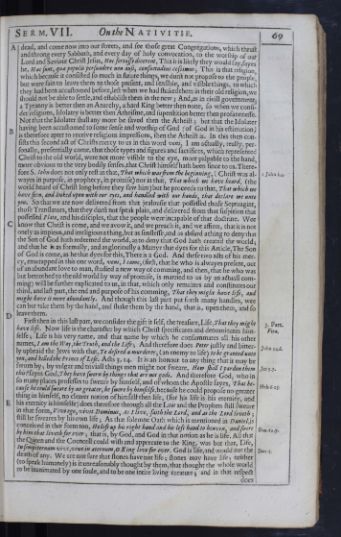 Serm. VII.
On the Nativitie.
69
dead, and come now into our streets, and see those great Congregations, which thrust
Serm. VII.
On the Nativitie.
69
dead, and come now into our streets, and see those great Congregations, which thrust
and throng every Sabbath, and every day of holy convocation, to the worship of our
Lord and Saviour Christ Jesus, Hoc fortasse dicerent, This it is likely they would say, sayes
he, Hæc sunt, quæ populis persuadere non ausi, consætudini cessimus, This is that religion,
which because it consisted so much in future things, we durst not propose to the people,
but were fain to leave them to those present, and sensible, and visible things, to which
they had been accustomed before, lest when we had shaked them in their old religion, we
should not be able to settle, and establish them in the new; And, as in civill government,
a Tyranny is better then an Anarchy, a hard King better then none, so when we consi-
der religions, Idolatry is better then Atheisme, and superstition better then profanenesse.
Not that the Idolater shall any more be saved then the Atheist; but that the Idolater
having been accustomed to some sense and worship of God (of God in his estimation)
is therefore apter to receive religious impressions, then the Atheist is. In this then con-
sists this second act of Christs mercy to us in this word veni, I am actually, really, per-
sonally, presentially come, that those types and figures and sacrifices, which represented
Christ to the old world, were not more visible to the eye, more palpable to the hand,
more obvious to the very bodily senses, that Christ himself hath been since to us. There-
fore S. Iohn does not only rest in that, That which was from the beginning,1 John 1.1. (Christ was al-
wayes in purpose, in prophecy, in promise) nor in that, That which we have heard, (the
world heard of Christ long before they saw him) but he proceeds to that, That which we
have seen, and looked upon with our eyes, and handled with our hands, that declare we unto
you. So that we are now delivered from that jealousie that possessed those Septuagint,
those Translators, that they durst not speak plain, and delivered from that suspition that
possessed Plato, and his disciples, that the people were incapable of that doctrine. Wee
know that Christ is come, and we avow it, and we preach it, and we affirm, that it is not
onely as impious, and irreligious a thing, but as senslesse, and as absurd a thing to deny that
the Son of God hath redeemed the world, as to deny that God hath created the world;
and that he is as formally, and as gloriously a Martyr that dyes for this Article, The Son
of God is come, as he that dyes for this, There is a God. And these two acts of his mer-
cy, enwrapped in this one word, veni, I came, (first, that he who is alwayes present, out
of an abundant love to man, studied a new way of comming, and then, that he who was
but betrothed to the old world by way of promise, is married to us by an actuall com-
ming) will be farther explicated to us, in that, which only remaines and constitutes our
third, and last part, the end and purpose of his comming, That they might have life, and
might have it more abundantly. And though this last part put forth many handles, wee
can but take them by the hand, and shake them by the hand, that is, open them, and so
leave them.
First then in this last part, we consider the gift it self, the treasure, Life, 3. Part. That they might
have life. Vita. Now life is the character by which Christ specificates and denominates him-
selfe; Life is his very name, and that name by which he consummates all his other
names, I am the Way, the Truth, and the Life;John 14.6. And therefore does Peter justly and bitter-
ly upbraid the Jews with that, Ye desired a murderer, (an enemy to life) to be granted unto
you, and killed the Prince of Life. Acts 3.14. It is an honour to any thing that it may be
sworn by; by vulgar and triviall things men might not sweare, Jer. 5.7. How shall I pardon them
this? sayes God, They have sworn by things that are not gods. And therefore God, who in
so many places professes to sweare by himself, and of whom the Apostle sayes, Heb. 6.13. That be-
cause he could sweare by no greater, he swore by himselfe, because he could propose no greater
thing in himself, no clearer notion of himself then life, (for his life is his eternity, and
his eternity is himselfe) does therefore through all the Law and the Prophets still sweare
in that form, Vivo ego, vivit Dominus, As I live, saith the Lord, and as the Lord liveth;
still he sweares by his own life; As that solemne Oath which is mentioned in Daniel, is
conceived in that form too, He lift up his right hand and his left hand to heaven,Dan. 12.7. and swore
by him that liveth for ever; that is, by God, and God in that notion as he is life. All that
the Queen and the Councell could wish and apprecate to the King, was but that, Life,
In sempiternum vive, vive in æternum, O King live for ever. God is life, Dan. 5. and would not the
death of any. We are not sure that stones have not life; stones may have life; neither
(to speak humanely) is it unreasonably thought by them, that thought the whole world
to be inanimated by one soule, and to be one intire living creature; and in that respect does
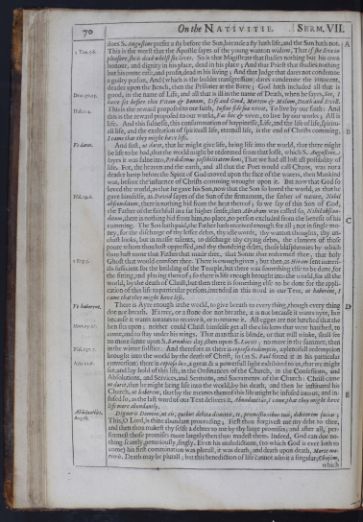 70
On the Nativitie.
Serm. VII.
does S. Augustine prefer a fly before the Sun, 1 Tim. 5.6. because a fly hath life, and the Sun hath not.
70
On the Nativitie.
Serm. VII.
does S. Augustine prefer a fly before the Sun, 1 Tim. 5.6. because a fly hath life, and the Sun hath not.
This is the worst that the Apostle sayes of the young wanton widow, That if she live in
pleasure, she is dead whilst she lives. So is that Magistrate that studies nothing but his own
honour, and dignity in his place, dead in his place; And that Priest that studies nothing
but his owne ease, and profit, dead in his living; And that Judge that dares not condemne
a guilty person, And (which is the bolder transgression) dares condemne the innocent,
deader upon the Bench, then the Prisoner at the Barre; God hath included all that is
good, Dcut. 30.15. in the name of Life, and all that is ill in the name of Death, when he sayes, See, I
have set before thee Vitam & Bonum, Life and Good, Mortem & Malum, Death and Evill.
This is the reward proposed to our faith, Hab. 2.4. Iustus fide sua vivit, To live by our faith: And
this is the reward proposed to our works, Fac hoc & vives, to live by our works; All is
life. And this fulnesse, this consummation of happinesse, Life, and the life of life, spiritu-
all life, and the exaltation of spirituall life, eternall life, is the end of Christs comming,
I came that they might have life.
And first, Vt daret. ut daret, that he might give life, bring life into the world, that there might
be life to be had, that the world might be redeemed from that losse, which S. Augustine
sayes it was falne into, Perdidimus possibilitatem boni, That we had all lost all possibility of
life. For, the heaven and the earth, and all that the Poet would call Chaos, was not a
deader lump before the Spirit of God moved upon the face of the waters, then Mankind
was, before the influence of Christs comming wrought upon it. But now that God so
loved the world, as that he gave his Son, now that the Son so loved the world, as that he
gave himselfe, Psal. 19.6. as David sayes of the Sun of the firmament, the father of nature, Nihit
absconditum, there is nothing hid from the heat thereof; so we say of this Son of God,
the Father of the faithfull in a far higher sense, then Abraham was called so, Nihilabscon-
ditum, there is nothing hid from him, no place, no person excluded from the benefit of his
comming. The Son hath paid, the Father hath received enough for all; not in fingle mo-
ney, for the discharge of thy lesser debts, thy idle words, thy wanton thoughts, thy un-
chast looks, but in massie talents, to discharge thy crying debts, the clamors of those
poore whom thou hast oppressed, and thy thundring debts, those blasphemies by which
thou hast torne that Father that made thee, that Sonne that redeemed thee, that boly
Ghost that would comfort thee.1 Reg. 5. There is enough given; but then, as Hiram sent materi-
als sufficient for the building of the Temple, but there was something else to be done, for
the fitting, and placing thereof; so there is life enough brought into the world, for all the
world, by the death of Christ, but then there is something else to be done for the appli-
cation of this life to particular persons, intended in this word in our Text, ut haberent, I
came that they might have life.
There is Ayre enough in the world, Vt haberent. to give breath to every thing, though every thing
doe not breath. If a tree, or a stone doe not breathe, it is not because it wants ayre, but
because it wants meanes to receive it, or to returne it. All egges are not hatched that the
hen sits upon;Matt. 23.37. neither could Christ himselfe get all the chickens that were hatched, to
come, and to stay under his wings. That man that is blinde, or that will winke, shall see
no more sunne upon S. Barnabies day, then upon S. Lucies; no more in the summer, then
in the winter solstice.Psal. 130.7. And therefore as there is copiosa redemptio, a plentifull redemption
brought into the world by the death of Christ, so (as S. Paul found it in his particular
conversion) there is copiosa lux,Acts 22.6. a great & a powerfull light exhibited to us, that we might
see, and lay hold of this life, in the Ordinances of the Church, in the Confessions, and
Absolutions, and Services, and Sermons, and Sacraments of the Church: Christ came
ut daret, that he might bring life into the world, by his death, and then he instituted his
Church, ut haberent, that by the meanes thereof this life might be infused into us, and in-
fused so, as the last word of our Text delivers it, Abundantiùs, I came, that they might have
life more abundantly.
Dignaris Domine, Abūdantiùs ut eis, quibus debita dimittis, te, promissionibus tuis, debitorem facias;
This, O Lord, is thine abundant proceeding; First thou forgivest me my debt to thee, August.
and then thou makest thy selfe a debter to me by thy large promises; and after all, per-
formest those promises more largely then thou madest them. Indeed, God can doe no-
thing scantly, penuriously, singly. Even his maledictions, (to which God is ever loth to
come) his first commination was plurall, it was death, and death upon death, Morte mo-
rieris. Death may be plurall; but this benediction of life cannot admit a singular; Chajim, which
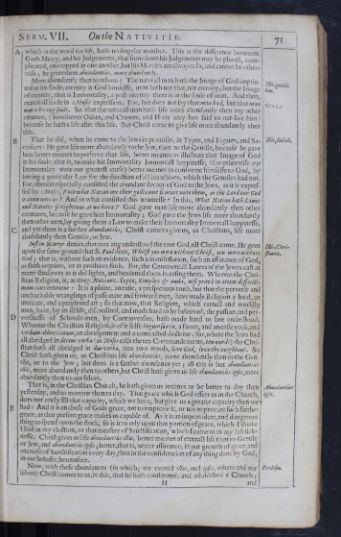 Serm. VII.
On the Nativitie.
71
which is the word for life, hath no singular number. This is the difference betweene
Serm. VII.
On the Nativitie.
71
which is the word for life, hath no singular number. This is the difference betweene
Gods Mercy, and his Judgements, that sometimes his Judgements may be plurall, com-
plicated, enwrapped in one another, but his Mercies are alwayes so, and cannot be other-
wise; he gives them abundantiùs, more abundantly.
More abundantly then to whom? Illis, genti-
bus. The naturall man hath the Image of God imprin-
ted in his soule; eternity is God himselfe, man hath not that, not eternity; but the Image
of eternity, that is Immortality, a post eternity there is in the soule of man. And then,
man is all soule in Moses expression; For, hee does not say that man had,Gen. 2.7. but that man
was a living soule. So that the naturall man hath life more abundantly then any other
creature, (howsoever Oakes, and Crowes, and Harts may bee said to out-live him)
because he hath a life after this life. But Christ came to give life more abundantly then
this.
That he did, when he came to the Jews in promises, in Types, and Figures, and Sa-
crifices:Illis, Iudæis. He gave life more abundantly to the Jew, then to the Gentile, because he gave
him better meanes to preserve that life, better meanes to illustrate that Image of God
in his soule, that is, to make his Immortality Immortall happinesse, (for otherwise our
Immortality were our greatest curse) better meanes to conforme himselfe to God, by
having a particular Law for the direction of all his actions, which the Gentiles had not.
For, therein especially consisted the abundant favour of God to the Jews, as it is expres-
sed by Moses, Vnto what Nation are their gods come so neare unto them, as the Lord our God
is come unto us? And in what consisted this nearnesse? In this, What Nation hath Lawes
and Statutes so righteous as we have? God gave man life more abundantly then other
creatures, because he gave him Immortality; God gave the Jews life more abundantly
then other men, by giving them a Law to make their Immortality Immortall happinesse,
and yet there is a further abundantiùs, Christ came to give us, us Christians, life more
abundantly then Gentile, or Jew.
Iustin Martyr denies, that ever any understood the true God, till Christ came.Illis, Chri-
stianis. He goes
upon the same ground that S. Paul does, Whilst you were without
Christ, you were without God; that is, without such an evidence, such a manifestation, such an assurance of God,
as faith requires, or as produces faith. For, the Ceremoniall Lawes of the Jewes cast as
many shadowes as it did lights, and burdened them in easing them. Whereas the Chri-
stian Religion, is; as Greg. Nazianz. sayes, Simplex & nuda, nisi pravè in artem difficili-
mam converteretur: It is a plaine, an easie, a perspicuous truth, but that the perverse and
uncharitable wranglings of passionate and froward men, have made Religion a hard, an
intricate, and a perplexed art; so that now, that Religion, which carnall and worldly
men, have, by an ill life, discredited, and made hard to be beleeved, the passion, and per-
versnesse of Schoole-men, by Controversies, hath made hard to bee understood.
Whereas the Christian Religion, is of it selfe Iugumsuave, a sweet, and an easie yoak, and
verbum abbreviatum, an abridgement and a contracted doctrine; for, where the Jews had
all abridged in decem verba (as Moses calls the ten Commandements, ten words) the Chri-
stian hath all abridged in duo verba, into two words, love God, love thy neighbour. So
Christ hath given us, us Christians life abundantiùs, more abundantly then to the Gen
tile, or to the Jew; but there is a farther abundance yet; all this is but abundantiùs
illis, more abundantly then to others, but Christ hath given us life abundantiùs ipsis, more
abundantly then to our selves.
That is, in the Christian Church, Abundantiùs
ipsis. he hath given us meanes to be better to day then
yesterday, and to morrow then to day. That grace which God offers us in the Church,
does not onely fill that capacity, which we have, but give us a greater capacity then we
had: And it is an abuse of Gods grace, not to emprove it, or not to procure such farther
grace, as that present grace makes us capable of. As it is an improvident, and dangerous
thing to spend upon the stock, so is it to rely upon that portion of grace, which I thinke
I had in my election, or that measure of Sanctification, which I came to in my last sick-
nesse. Christ gives us life abundantiùs illis, better meanes of eternall life then to Gentile
or Jew, and abundantiùs ipsis; better, that is, nearer assurance, in our growth of grace, and
encrease of Sanctification every day, then in the consideration of any thing done by God,
in our behalfe, heretofore.
Now, with these abundances (in which, we exceed illos, and ipsos,Ecclesia. others and our
selves) Christ comes to us, in this, that he hath constituted, and established a Church; H and
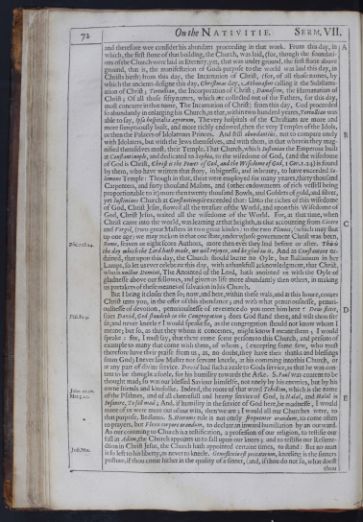 72
On the Nativitie.
Serm. VII.
and therefore wee consider his abundant proceeding in that work. From this day, in
72
On the Nativitie.
Serm. VII.
and therefore wee consider his abundant proceeding in that work. From this day, in
which, the first stone of that building, the Church, was laid, (for, though the foundati-
ons of the Church were laid in Eternity, yet, that was under ground, the first stone above
ground, that is, the manifestation of Gods purpose to the world was laid this day, in
Christs birth) from this day, the Incarnation of Christ, (for, of all those names, by
which the ancients designe this day, Christmas day, Athanasius calling it the Substanti-
ation of Christ; Tertullian, the Incorporation of Christ; Damascen, the Humanation of
Christ; Of all those fifty names, which are collected out of the Fathers, for this day,
most concurre in that name, The Incarnation of Christ) from this day, God proceeded
so abundantly in enlarging his Church, as that, within two hundred yeares, Tertullian was
able to say, Ipsa hospitalia ægrorum, The very hospitals of the Christians are more and
more sumptuously built, and more richly endowed, then the very Temples of the Idols,
or then the Palaces of Idolatrous Princes. And still abundantiùs, not to compare onely
with Idolaters, but with the Jews themselves, and with them, in that wherein they mag-
nified themselves most, their Temple. That Church, which Iustinian the Emperour built
at Constantinople, and dedicated to Sophia, to the wisedome of God, (and the wisedome of God
is Christ, Christ is the Power of God, and the Wisedome of God, 1 Cor. 1.24) is found
by them, who have written that story, in bignesse, and in beauty, to have exceeded So-
lomons Temple: Though in that, there were employed for many yeares, thirty thousand
Carpenters, and forty thousand Masons, and (other endowments of rich vessell being
proportionable to it) more then twenty thousand Bowls, and Goblets of gold, and silver,
yet Iustinians Church at Constantinople exceeded that: Unto the riches of this wisedome
of God, Christ Jesus, flowed all the treasure of the World, and upon this Wisedome of
God, Christ Jesus, waited all the wisedome of the World. For, at that time, when
Christ came into the world, was learning at that heighth, as that accounting from Cicero
and Virgil, (two great Masters in two great kindes) to the two Plinies, (which may shut
up one age) we may reckon in that one state, under whose government Christ was born,
Rome,Psal. 118.24. seaven or eight score Authors, more then ever they had before or after. This is
the day which the Lord hath made, we will rejoyce, and be glad in it. And as Constantine or-
dained, that upon this day, the Church should burne no Oyle, but Balsamum in her
Lamps, so let us ever celebrate this day, with a thankfull acknowledgment, that Christ,
who is unctus Domini, The Anointed of the Lord, hath anointed us with the Oyle of
gladnesse above our fellowes, and given us life more abundantly then others, in making
us partakers of these meanes of salvation in his Church.
But I bring it closer then so; now, and here, within these wals, and at this houre, comes
Christ unto you, in the offer of this abundance; and with what penuriousnesse, penuri-
ousnesse of devotion, penuriousnesse of reverence do you meet him here? Deus stetit,
saies David,Psal. 82.1. God standeth in the Congregation; does God stand there, and wilt thou sit?
sit, and never kneele? I would speake so, as the congregation should not know whom I
meane; but so, as that they whom it concernes, might know I meane them; I would
speake: for, I must say, that there come some persons to this Church, and persons of
example to many that come with them, of whom, (excepting some few, who must
therefore have their praise from us, as, no doubt, they have their thanks and blessings
from God) I never saw Master nor servant kneele, at his comming into this Church, or
at any part of divine service. David had such a zeale to Gods service, as that he was con-
tent to be thought a foole, for his humility towards the Arke. S. Paul was content to be
thought mad; so was our blessed Saviour himselfe, not onely by his enemies, but by his
owne friends and kinsfolke.John 10.20. Indeed, the roote of that word Tehillim, which is the name
of the Psalmes, and of all cheerefull and hearty service of God, is Halal, and Halal is Mar. 3.21.
Insanire, To fall mad; And, if humility in the service of God here, be madnesse, I would
more of us were more out of our wits, then we are; I would all our Churches were, to
that purpose, Bedlams. S. Hieroms rule is not onely frequenter orandum, to come often
to prayers, but Flexo corpore orandum, to declare an inward humiliation by an outward.
As our comming to Church is a testification, a profession of our religion, to testifie our
fall in Adam, the Church appoints us to fall upon our knees; and to testifie our Resurre-
ction in Christ Jesus, Just. Mar. the Church hath appointed certaine times, to stand: But no man
is so left to his liberty, as never to kneele. Genuflexio est peccatorum, kneeling is the sinners
posture; if thou come hither in the quality of a sinner, (and, if thou do not so, what doest thou
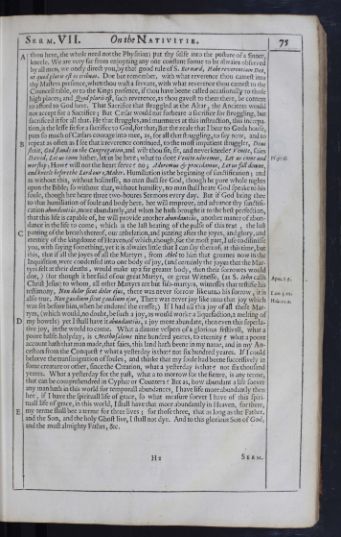 Serm. VII.
On the Nativitie.
75
thou here, the whole need not the Physitian) put thy selfe into the posture of a sinner,
Serm. VII.
On the Nativitie.
75
thou here, the whole need not the Physitian) put thy selfe into the posture of a sinner,
kneele. We are very far from enjoyning any one constant forme to be alwaies observed
by all men; we onely direct you, by that good rule of S. Bernard, Habe reverentiam Deo,
ut quod pluris est ei tribuas. Doe but remember, with what reverence thou camest into
thy Masters presence, when thou wast a servant, with what reverence thou camest to the
Councell table, or to the Kings presence, if thou have beene called occasionally to those
high places; and Quod plur is est, such reverence, as thou gavest to them there, be content
to afford to God here. That Sacrifice that struggled at the Altar, the Ancients would
not accept for a Sacrifice; But Cæsar would not forbeare a sacrifice for struggling, but
sacrificed it for all that. He that struggles, and murmures at this instruction, this increpa-
tion, is the lesse fit for a sacrifice to God, for that; But the zeale that I bear to Gods house,
puts so much of Cæsars courage into mee, as, for all that struggling, to say now, and to
repeat as often as I see that irreverence continued, to the most impatient struggler, Deus
stetit, God stands in the Congregation, and wilt thou sit; sit, and never kneele? Venite, saies
David, Let us come hither, let us be here; what to doe? Venite adoremus,Ps. 95.6. Let us come and
worship; How? will not the heart serve? no; Adoremus & procidamus, Let us fall downe,
and kneele before the Lord our Maker. Humiliation is the beginning of sanctification; and
as without this, without holinesse, no man shall see God, though he pore whole nights
upon the Bible; so without that, without humility, no man shall heare God speake to his
soule, though hee heare three two-houres Sermons every day. But if God bring thee
to that humiliation of soule and body here, hee will emprove, and advance thy sanctifi-
cation abundantiùs, more abundantly, and when he hath brought it to the best perfection,
that this life is capable of, he will provide another abundantiùs, another maner of abun-
dance in the life to come; which is the last beating of the pulse of this text, the last
panting of the breath thereof, our anhelation, and panting after the joyes, and glory, and
eternity of the kingdome of Heaven; of which, though, for the most part, I use to dismisse
you, with saying something, yet it is alwaies little that I can say thereof; at this time, but
this, that if all the joyes of all the Martyrs, from Abel to him that groanes now in the
Inquisition, were condensed into one body of joy, (and certainly the joyes that the Mar-
tyrs felt at their deaths, would make up a far greater body, then their sorrowes would
doe,) (for though it bee said of our great Martyr, or great Witnesse, Apoc. 1.5. (as S. Iohn calls
Christ Jesus) to whom, all other Martyrs are but sub-martyrs, witnesses that testifie his
testimony, Non dolor sicut dolor ejus, there was never sorrow like unto his sorrow, Lam. 3.12. it is
also true, Non gaudium sicut gaudium ejus, There was never joy like unto that joy which Heb. 12.2.
was set before him, when he endured the crosse;) If I had all this joy of all these Mar-
tyrs, (which would, no doubt, be such a joy, as would worke a liquefaction, a melting of
my bowels) yet I shall have it abundantiùs, a joy more abundant, then even this superla-
tive joy, in the world to come. What a dimme vespers of a glorious festivall, what a
poore halfe-holyday, is Methusalems nine hundred yeares, to eternity? what a poore
account hath that man made, that saies, this land hath beene in my name, and in my An-
cestors from the Conquest? what a yesterday is that? not six hundred yeares. If I could
beleeve the transmigration of soules, and thinke that my soule had beene successively in
some creature or other, since the Creation, what a yesterday is that? not six thousand
yeares. What a yesterday for the past, what a to morrow for the future, is any terme,
that can be comprehendred in Cyphar or Counters? But as, how abundant a life soever
any man hath in this world for temporall abundances, I have life more abundantly then
hee, if I have the spirituall life of grace, so what measure soever I have of this spiri-
tuall life of grace, in this world, I shall have that more abundantly in Heaven, for there,
my terme shall bee a terme for three lives; for those three, that as long as the Father,
and the Son, and the holy Ghost live, I shall not dye. And to this glorious Son of God,
and the most almighty Father, &c. H2 Serm.
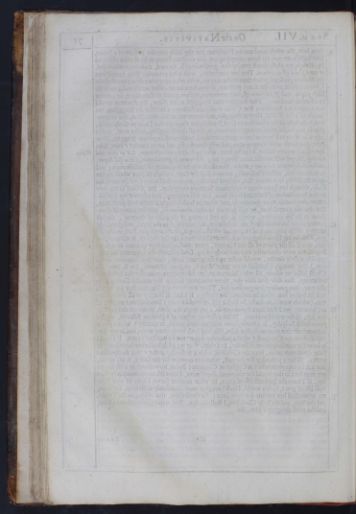
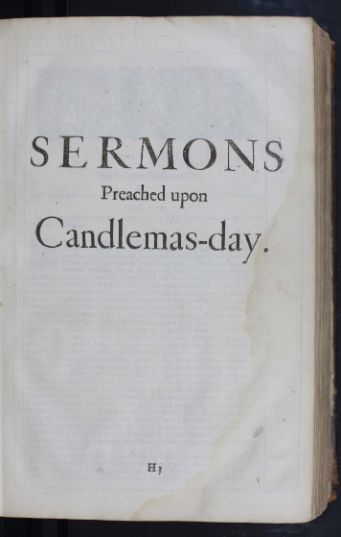
SERMONS
Preached upon
Candlemas-day. H3
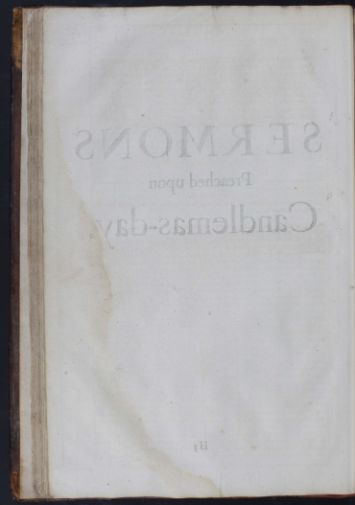
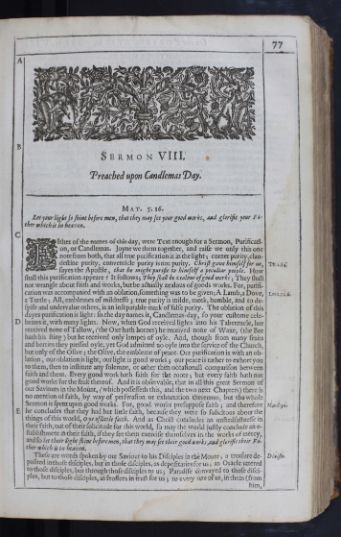 77
77
Sermon VIII.
Preached upon Candlemas Day.
Mat. 5.16.
Let your light so shine before men, that they may see your good works, and glorifie your Fa-
ther which is in heaven.
EItherEither of the names of this day, were Text enough for a Sermon, Purificati-
on, or Candlemas. Joyne we them together, and raise we only this one
note from both, that all true purification is in the light; corner purity, clan-
destine purity, conventicle purity is not purity. Christ gave himself for us, Tit. 2.14.
sayes the Apostle, that he might purifie to himself a peculiar people. How
shall this purification appeare? It follows; They shall be zealous of good works; They shall
not wrangle about faith and works, but be actually zealous of goods works. For, purifi-
cation was accompanied with an oblation, something was to be given; A Lamb, a Dove, Levit. 12.6.
a Turtle; All, emblemes of mildnesse; true purity is milde, meek, humble, and to de-
spise and undervalue others, is an inseparable mark of false purity. The oblation of this
dayes purification is light: so the day names it, Candlemas-day, so your custome cele-
brates it, with many lights. Now, when God received lights into his Tabernacle, hee
received none of Tallow, (the Oxe hath hornes) he received none of Waxe, (the Bee
hath his sting) but he received only lampes of oyle. And, though from many fruits
and berries they pressed oyle, yet God admitted no oyle into the service of the Church,
but only of the Olive; the Olive, the embleme of peace. Our purification is with an ob-
lation, our oblation is light, our light is good works; our peace is rather to exhort you
to them, then to institute any solemne, or other then occasionall comparison between
faith and them. Every good work hath faith for the roote; but every faith hath not
good works for the fruit thereof. And it is observable, that in all this great Sermon of
our Saviours in the Mount, (which possesseth this, and the two next Chapters) there is
no mention of faith, by way of perswasion or exhortation thereunto, but the whole
Sermon is spent upon good works. For, good works presuppose faith;Mat. 6.30. and therefore
he concludes that they had but little faith, because they were so solicitous about the
things of this world, O ye of little faith. And as Christ concludes an unstedfastnesse in
their faith, out of their solicitude for this world, so may the world justly conclude an e-
stablishment in their faith, if they see them exercise themselves in the works of mercy,
and so let their light shine before men, that they may see their good works, and glorifie their Fa-
ther which is in heaven.
These are words spoken by our Saviour to his Disciples in the Mount;Divisio. a treasure de-
posited in those disciples, but in those disciples, as depositaries for us; an Oracle uttered
to those disciples, but through those disciples to us; Paradise convayed to those disci-
ples, but to those disciples, as feoffees in trust for us; to every one of us, in them (from him,
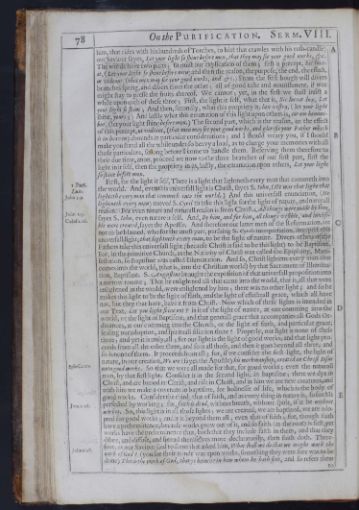 78
On the Purification.
Serm. VIII.
him, that rides with his hundreds of Torches, to him that crawles with his rush-candle)
78
On the Purification.
Serm. VIII.
him, that rides with his hundreds of Torches, to him that crawles with his rush-candle)
our Saviour sayes, Let your light so shine before men, that they may see your good works, &c.
The words have two parts; so must our explication of them; first a precept, Sic luce-
at, (Let your light so shine before men) and then the reason, the purpose, the end, the effect,
ut videant, (that men may see your good works, and &c.) From the first bough will divers
branches spring, and divers from the other; all of good taste and nourishment, if wee
might stay to presse the fruits thereof. We cannot; yet, in the first we shall insist a
while upon each of these three; First, the light it self, what that is, Sic luceat lux, Let
your light so shine; And then, secondly, what this propriety is, lux vestra, (let your light
shine, yours;) And lastly what this emanation of this light upon others is, coram homini-
bus, (let your light shine before men.) The second part, which is the reason, or the effect
of this precept, ut videant, (that men may see your good works, and glorifie your Father which
is in heaven) abounds in particular considerations; and I should weary you, if I should
make you stand all the while under so heavy a load, as to charge your memories with all
those particulars, so long before I come to handle them. Reserving them therefore to
their due time, anon, proceed we now to the three branches of our first part, first the
light in it self, then the propriety in us, lastly, the emanation upon others, Let your light
so shine before men.
First, 1 Part. for the light it self, There is a light that lightneth every man that commeth into
the world. And, even this universall light is Christ, sayes S. Iohn, (He was that light that Lux-
lighteth every man that commeth into the world.) And this universall enunciation, (HeJohn 1.9.
lightneth every man) moved S. Cyril to take this light for the light of nature, and naturall
reason.John 1.3. For even nature and naturall reason is from Christ. All things were made by him,
sayes S. Iohn, even nature it self. And, By him, and for him, all things visible, and Colos. 1.16. invisi-
ble were created, sayes the Apostle. And therefore our latter men of the Reformation, are
not to be blamed, who for the most part, pursuing S. Cyrils interpretation, interpret this
universall light, that lightneth every man, to be the light of nature. Divers others of the
Fathers take this universall light (because Christ is said to be this light) to be Baptisme.
For, in the primitive Church, as the Nativity of Christ was called the Epiphany, Mani-
festation, so Baptisme was called Illumination. And so, Christ lightens every man that
comes into the world, (that is, into the Christian world) by that Sacrament of Illumina-
tion, Baptisme. S. Augustine brought the exposition of that universall proposition into
a narrow roome; That he enlightned all that came into the world, that is, all that were
enlightned in the world, were enlightned by him; there was no other light; and so he
makes this light to be the light of faith, and the light of effectuall grace, which all have
not, but they that have, have it from Christ. Now which of these lights is intended in
our Text, Let you light shine out? is it of the light of nature, at our comming into the
world, or the light of Baptisme, and that generall grace that accompanies all Gods Or-
dinances, at our comming into the Church, or the light of faith, and particular grace,
sealing our adoption, and spirituall filiation there? Properly, our light is none of these
three; and yet it is truly, all; for our light is the light of good works; and that light pro-
ceeds from all the other three, and so is all those, and then it goes beyond all three, and
so is none of them. It proceeds from all; for, if we consider the first light, the light of
nature, Ephes. 2.10. in our creation, We are (sayes the Apostle) his workmanship, created in Christ Iesus
unto good works. So that we were all made for that, for good works; even the naturall
man, by that first light. Consider it in the second light, in baptisme; there we dye in
Christ, and are buried in Christ, and rise in Christ, and in him we are new creatures, and
with him we make a covenant in baptisme, for holinesse of life, which is the body of
good works. Consider the third, that of faith, and as every thing in nature is, so faith is
perfected by working;Jam. 2.26. for, faith is dead, without breath, without spirit, if it be without
workes. So, this light is in all those lights; we are created, we are baptized, we are ado-
pted for good works; and it is beyond them all, even that of faith; for, though faith
have a preheminence, because works grow out of it, and so faith (as the root) is first, yet
works have the preheminence thus, both that they include faith in them, and that they
dilate, and diffuse, and spread themselves more declaratorily, then faith doth. There-
fore, as our Saviour said to some that asked him, John 6.28. What shall we do that we might work the
work of God? (you see their minde was upon works, something they were sure was to be
done) This is the work of God, that ye beleeve in him whom he hath sent, and so refers them to
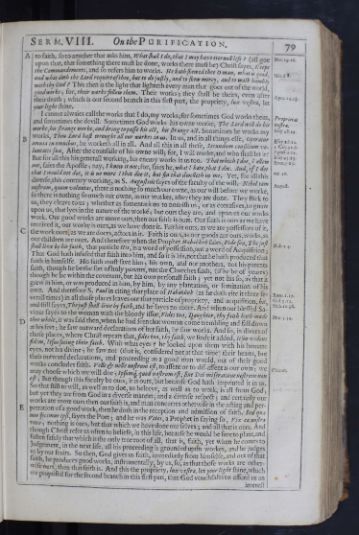 Serm. VIII.
On the Purification.
79
to faith, so to another that asks him, What shall I do, that I may have eternall life?Mat. 19.16. (all goe
Serm. VIII.
On the Purification.
79
to faith, so to another that asks him, What shall I do, that I may have eternall life?Mat. 19.16. (all goe
upon that, that something there must be done, works there must be) Christ sayes, Keepe
the Commandements, and so refers him to works. He hath shewed thee O man, what is good, Mic. 6.8.
and what doth the Lord require of thee, but to do justly, and to shew mercy, and to walk humbly
with thy God? This then is the light that lighteth every man that goes out of the world,
good works; for, their works follow them. Their works; they shall be theirs, Apoc. 14.13. even after
their death; which is our second branch in this first part, the propriety, lux vestra, let
your light shine.
I cannot alwaies call the works that I do, my works; for sometimes God works them, Proprietas
vestra.
and sometimes the devill: Sometimes God works his owne worke, The Lord will do his
worke, his strange worke, and bring to passe his act, his strange act. Sometimes he works my Esay 28.21.
works, Thou Lord hast wrought all our workes in us. In us, and in all things else, Esay 26.12.
1 Cor. 12.6.
Ephes. 1.11.
Esay 43.13.
Rom. 7.15. Operatur
omnia in omnibus, he worketh all in all. And all this in all these, Secundum consilium vo-
luntatis suæ, After the counsaile of his owne will; for, I will worke, and who shall let it?
But for all this his generall working, his enemy works in us too. That which I doe, I allow
not, saies the Apostle; nay, I know it not; for, saies he, what I hate, that I doe. And, if I doe
that I would not doe, it is no more I that doe it, but sin that dwelleth in me. Yet, ver. 20. for all this
diverse, this contrary working, as S. Augustine sayes of the faculty of the will, Nihil tam August.
nostrum, quam voluntas, there is nothing so much our owne, as our will before we worke,
so there is nothing so much our owne, as our workes, after they are done. They stick to
us, they cleave to us; whether as fomentations to nourish us, or as corrasives, to gnaw
upon us, that lyes in the nature of the worke; but ours they are; and upon us our works
work. Our good works are more ours, then our faith is ours. Our faith is ours as we have
received it, our worke is ours, as we have done it. Faith is ours, as we are possessors of it,
the work ours, as we are doers, actors in it. Faith is ours, as our goods are ours, works, as
our children are ours. And therefore when the Prophet Habakkuk saies, Fide sua, Hab. 2.4. The just
shall live by his faith, that particle His, is a word of possession, not a word of Acquisition;
That God hath infused that faith into him, and so it is his, not that he hath produced that
faith in himselfe. His faith must save him; his own, and not anothers, not his parents
faith, though he be the son of holy parents, not the Churches faith, (if he be of yeares)
though he be within the covenant, but his own personall faith; yet not his so, as that it
grew in him, or was produced in him, by him, by any plantation, or semination of his
own. And therefore S. Paul in citing that place of Habakkuk (as he doth cite it three Rom. 1.17.
Gal. 3.11.
Heb. 10.36. se-
verall times) in all those places leaves out that particle of propriety; and acquisition, his,
and still sayes, The just shall live by faith, and he sayes no more. And when our blessed Sa-
viour sayes to the woman with the bloody issue, Fides tua, Daughter, Mar. 5.34. thy faith hath made
thee whole, it was said then, when he had seen that woman come trembling and fall down
at his feet; he saw outward declarations of her faith, he saw works. And so, in divers of
those places, where Christ repeats that, fides tua, thy faith, we finde it added, Iesus videns
fidem, Iesus seeing their faith. With what eyes? he looked upon them with his humane
eyes, not his divine; he saw not (that is, considered not at that time) their hearts, but
their outward declarations, and proceeding as a good man would, out of their good
works concludes faith. Velle & nolle nostrum est, to assent or to dis-assent is our own;Hieron. we
may choose which we will doe; Ipsum quod nostrum est, sine Dei miseratione nostrum non
est; But though this faculty be ours, it is ours, but because God hath imprinted it in us.
So that still to will, as well as to doe, to beleeve, as well as to work, is all from God;
but yet they are from God in a diverse manner, and a diverse respect; and certainly our
works are more ours then our faith is, and man concurres otherwise in the acting and per-
petration of a good work, then he doth in the reception and admission of faith. Sed quæ
non fecimus ipsi, sayes the Poet; and he was Vates, a Prophet in saying so, Vix ea nostra
voco; nothing is ours, but that which we have done our selves; and all that is ours. And
though Christ refer us often to beliefe, in this life, because he would be sure to plant, and
fasten safely that which is the only true root of all, that is, faith, yet when he comes to
Judgement, in the next life, all his proceeding is grounded upon workes, and he judges
us by our fruits. So then, God gives us faith, immediatly from himselfe, and out of that
faith, he produces good works, instrumentally, by us, so, as that those works are other-
wise ours, then that faith is. And this the propriety, lux vestra, let your light shine, which
we proposed for the second branch in this first part, that God vouchsafes to afford us an interest
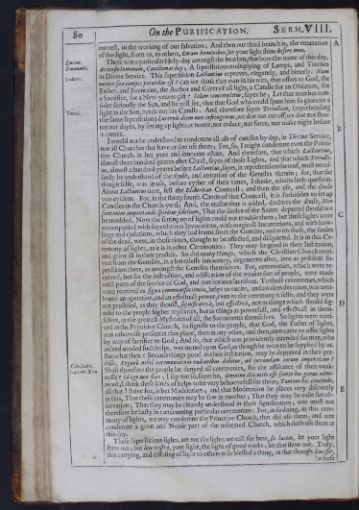 80
On the Purification.
Serm. VIII.
interest, in the working of our salvation; And then our third branch is, the emanation
80
On the Purification.
Serm. VIII.
interest, in the working of our salvation; And then our third branch is, the emanation
of this light, from us, to others, Coram hominibus, let your light shine before men.
There was a particular Holy-day amongst the heathen, Luceat.
Emanatio. that bore the name of this day,
Accensio luminum, Candlemas day; A superstitious multiplying of Lamps, and Torches
in Divine Service.Lactant. This superstition Lactantius reproves, elegantly, and bitterly. Num
mentis suæ compos putandus est? can we think that man in his wits, that offers to God, the
Father, and Fountaine, the Author and Giver of all light, a Candle for an Oblation, for
a Sacrifice, for a New-yeares gift? Solem contempletur, sayes he; Let that man but con-
sider seriously the Sun, and he will see, that that God who could spare him so glorious a
light as the Sun, Tertul. needs not his Candle. And therefore sayes Tertullian, (reprehending
the same superstition) Lucernis diem non infringimus, we doe not cut off, we doe not shor-
ten our dayes, by setting up lights at noone, nor induce, nor force, nor make night before
it comes.
I would not be understood to condemne all use of candles by day, in Divine Service,
nor all Churches that have or doe use them; For, so, I might condemne even the Primi-
tive Church, in her pure and innocent estate. And therefore, that which Lactantius,
almost three hundred yeares after Christ, sayes of those Lights, and that which Tertulli-
an, almost a hundred yeares before Lactantius, sayes, in reprehension thereof, must neces-
sarily be understood of the abuse, and imitation of the Gentiles therein; for, that the
thing it selfe, was in use, before eyther of their times, I thinke, admits little question.
About Lactantius time, fell the Eliberitan Councell; and then the use, and the abuse
was evident. For, in the thirty fourth Canon of that Councell, it is forbidden to set up
Candles in the Church-yard: And, the reason that is added, declares the abuse, Non
sunt enim inquietandi spiritus sidelium, That the soules of the Saints departed should not
be troubled. Now the setting up of lights could not trouble them; but these lights were
accompanied with superstitious Invocations, with magicall Incantations, and with how-
lings and ejulations, which they had learnt from the Gentiles, and with these, the soules
of the dead, were, in those times, thought to be affected, and disquieted. It is in this Ce-
remony of lights, as it is in other Ceremonies: They may be good in their Institution,
and grow ill in their practise. So did many things, which the Christian Church recei-
ved from the Gentiles, in a harmlesse innocency, degenerate after, into as pestilent su-
perstition there, as amongst the Gentiles themselves. For, ceremonies, which were re-
ceived, but for the instruction, and edification of the weaker sort of people, were made
reall parts of the service of God, and meritorious sacrifices. To those ceremonies, which
were received as signa commonefacientia, helps to excite, and awaken devotion, was attri-
buted an operation, and an effectuall power, even to the ceremony it selfe; and they were
not practised, as they should, significativè, but effectivè, not as things which should sig-
nifie to the people higher mysteries, but as things as powerfull, and effectuall in them-
selves, as the greatest Mysteries of all, the Sacraments themselves. So lights were recei-
ved in the Primitive Church, to signifie to the people, that God, the Father of lights,
was otherwise present in that place, then in any other, and then, men came to offer lights
by way of sacrifice to God; And so, that which was providently intended for man, who
indeed needed such helps, was turned upon God, as though he were to be supplied by us.
But what then? Because things good in their institution, may be depraved in their pra-
ctise, Ergonè nihil ceremoniarum rudioribus dabitur, Calv. Instit.
l. 4. c. 10. § 14. ad juvandam eorum imperitiam?
Shall therefore the people be denyed all ceremonies, for the assistance of their weak-
nesse? Id ego non dico; I say not so, sayes he. Omnino illis utile esse sentio hoc genus admi-
niculi; I think these kinds of helps to be very behoovefull for them; Tantum hîc contendo,
all that I strive for, is but Moderation; and that Moderation he places very discreetly
in this, That these ceremonies may be few in number; That they may be easie for ob-
servation; That they may be clearely understood in their signification; wee must not
therefore be hasty in condemning particular ceremonies: For, in so doing, in this cere-
mony of lights, we may condemne the Primitive Church, that did use them, and wee
condemne a great and Noble part of the reformed Church, which doth use them at
this day.
These superstitious lights, are not the lights we call for here, sic luceat, let your light
shine out; but lux vestra, your light, the light of good works; let that shine out. Truly,
this carrying, and diffusing of light to others is so blessed a thing, as that though Lucifer, (whose
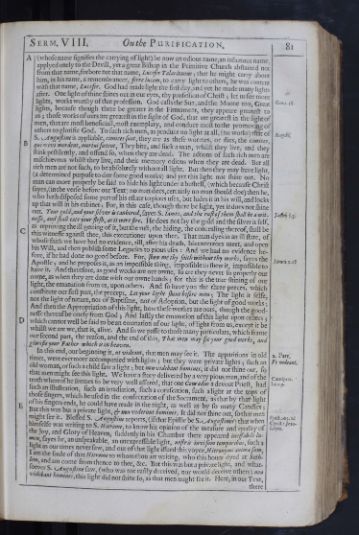 Serm. VIII.
On the Purification.
81
(whose name signifies the carrying of light) be now an odious name, an infamous name,
Serm. VIII.
On the Purification.
81
(whose name signifies the carrying of light) be now an odious name, an infamous name,
applyed onely to the Devill, yet a great Bishop in the Primitive Church abstained not
from that name, forbore not that name, Lucifer Talaritanus; that he might carry about
him, in his name, a remembrancer, ferre lucem, to carry light to others, he was content
with that name, Lucifer. God had made light the first day, and yet he made many lights
after. One light of thine shines out in our eyes, thy profession of Christ; let us see more
lights, works worthy of that profession. God calls the Sun, and the Moone too, Gen. 1.16. Great
lights, because though there be greater in the Firmament, they appeare greatest to
us; those works of ours are greatest in the sight of God, that are greatest in the sight of
men, that are most beneficiall, most exemplary, and conduce most to the promoving of
others to glorifie God. To such rich men, as produce no light at all, August. (no works) that of
S. Angustine is appliable, cimices sunt, they are as these wormes, or flies, the cimices,
qui vivi mordent, mortui fœtent, They bite, and suck a man, whilst they live, and they
stink pestilently, and offend so, when they are dead. The actions of such rich men are
mischievous whilst they live, and their memory odious when they are dead. But all
rich men are not such, to be absolutely without all light. But then they may have light,
(a determined purpose to doe some good works) and yet this light not shine out. No
man can more properly be said to hide his light under a bushell, (which because Christ
sayes, (in the verse before our Text) no man does, certainly no man should doe) then he,
who hath disposed some part of his estate to pious uses, but hides it in his will, and locks
up that will in his cabinet; For, in this case, though there be light, yet it does not shine
out. Your gold, and your silver is cankered, sayes S. Iames, and the rust of them shall be a James 5.3. wit-
nesse, and shall eate your flesh, as it were fire. He does not say the gold and the silver it self,
as reproving the ill getting of it, but the rust, the hiding, the concealing thereof, shall be
this witnesse against thee, this executioner upon thee. That man dyes in an ill state, of
whose faith we have had no evidence, till, after his death, his executors meet, and open
his Will, and then publish some Legacies to pious uses: And we had no evidence be-
fore, if he had done no good before. For, shew me thy faith without thy works, James. 2.18 sayes the
Apostle; and he proposes it, as an impossible thing, impossible to shew it, impossible to
have it. And therefore, as good works are our owne, so are they never so properly our
owne, as when they are done with our owne hands; for this is the true shining of our
light, the emanation from us, upon others. And so have you the three peeces, which
constitute our first part, the precept, Let your light shine before men; The light it selfe,
not the light of nature, nor of Baptisme, nor of Adoption, but the light of good works;
And then the Appropriation of this light, how these workes are ours, though the good-
nesse thereof be onely from God; And lastly the emanation of this light upon others;
which cannot well be said to be an emanation of our light, of light from us, except it be
whilst we are we, that is, alive. And so we passe to those many particulars, which frame
our second part, the reason, and the end of this, That men may see your good works, and
glorifie your Father which is in heaven.
In this end, our beginning is, ut videant, that men may see it. The apparitions in old 2. Part.
times, were evermore accompanied with lights; but they were private lights;Vt videant. such an
old woman, or such a child saw a light; but non videbant homines, it did not shine out, so
that men might see this light. We have a story delivered by a very pious man, Cantiprat.
l. 1. c. 9. and of the
truth whereof he seemes to be very well assured, that one Conradus a devout Priest, had
such an illustration, such an irradiation, such a coruscation, such a light at the tops of
those fingers, which he used in the consecration of the Sacrament, as that by that light
of his fingers ends, he could have reade in the night, as well as by so many Candles;
But this was but a private light, & non viderunt homines, It did not shine out, Epist. 205. ad
Cyrill: Jero-
solym. so that men
might see it. Blessed S. Augustine reports, (if that Epistle be S. Augustines) that when
himselfe was writing to S. Hierome, to know his opinion of the measure and quality of
the Joy, and Glory of Heaven, suddenly in his Chamber there appeared ineffabile lu-
men, sayes he, an unspeakable, an unexpressible light, nostris invisum temporibus, such a
light as our times never saw, and out of that light issued this voyce, Hieronymi anima sum,
I am the soule of that Hierome to whom thou art writing, who this houre dyed at Beth-
lem, and am come from thence to thee, &c. But this was but a private light, and what-
soever S. Augustine saw, (who was not easily deceived, nor would deceive others) non
videbant homines, this light did not shine so, as that men might see it. Here, in our Text, there
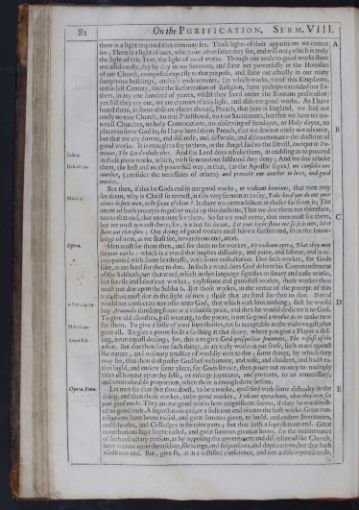 82
On the Purification.
Serm. VIII.
there is a light required that men may see. Those lights of their apparitions we cannot
82
On the Purification.
Serm. VIII.
there is a light required that men may see. Those lights of their apparitions we cannot
see; There is a light of ours, which our adversaries may see, and will not; which is truly
the light of this Text, the light of good works. Though our zeale to good works shine
out assiduously, day by day in our Sermons, and shine out powerfully in the Homilies
of our Church, composed expresly to that purpose, and shine out actually in our many
sumptuous buildings, and rich endowments, (in which works, we of this Kingdome,
in this last Century, since the Reformation of Religion, have perhaps exceeded our Fa-
thers, in any one hundred of yeares, whilst they lived under the Romane perswasion)
yet still they cry out, we are enemies of this light, and abhorre good works. As I have
heard them, in some obscure places abroad, Preach, that here in England, we had not
onely no true Church, no true Priesthood, no true Sacraments, but that we have no ma-
teriall Churches, no holy Convocations, no observing of Sundayes, or Holy dayes, no
places to serve God in; so I have heard them Preach, that we doe not onely not advance,
but that we cry downe, and discredit, and disswade, and discountenance the doctrine of
good works. It is enough to say to them, as the Angel said to the Devill, Increpet te Do-
minus, The Lord rebuke thee.Iude 9. And the Lord does rebuke them, in enabling us to proceed
in these pious works, which, with so notorious falshood they deny; And we doe rebuke
them, Heb. 10.24. the best and most powerfull way, in that, (as the Apostle sayes) we consider one
another, (consider the necessities of others) and provoke one another to love, and good
workes.
But then, if this be Gods end in our good works, ut videant homines, that men may
see them, Mat. 6.1. why is Christ so earnest, in this very sermon as to say, Take heed you do not your
almes before men, to be seene of them? Is there no contradiction in these? far from it; The
intent of both precepts together make up this doctrine, That we doe them not therefore,
not to that end, that men may see them. So far we must come, that men must see them,
but we must not rest there; for, it is but Sic luceat, Let your light shine out so, it is not, let it
shine out therefore; Our doing of good workes must have a farther end, then the know-
ledge of men, as we shall see, towards our end, anon.
Men must see them then, Opera. and see them to be workes, Vt videant opera, That they may
see your works: which is a word that implies difficulty, and paine, and labour, and is ac-
companied with some loathnesse, with some colluctation. Doe such workes, for Gods
sake, as are hard for thee to doe. In such a word does God deliver his Commandement
of the Sabbath; not that word, which in that language signifies ordinary and easie works,
but servile and laborious workes, toylesome and gainefull workes, those workes thou
maist not doe upon the Sabbath. But those workes, in the vertue of the precept of this
text, thou must doe in the sight of men; those that are hard for thee to doe. David
would not consecrate nor offer unto God, 2. Sam. 24.24. that which cost him nothing; first he would
buy Araunahs threshing floare at a valuable price, and then he would dedicate it to God.
To give old cloathes, past wearing, to the poore, is not so good a worke as to make new
for them.Mar. 12.42. To give a little of your superfluities, not so acceptable as the widows gift, that
gave all. To give a poore soule a farthing at that doore, where you give a Player a shil-
ling, is not equall dealing;Amos 8.6. for, this is to give God quisquilias frumenti, The refuse of the
wheat. But doe thou some such things, as are truly works in our sense, such as are against
the nature, and ordinary practice of worldly men to doe; some things, by which they
may see, that thou dost prefer God before honour, and wife, and children, and hadst ra-
ther build, and endow some place, for Gods service, then poure out money to multiply
titles of honour upon thy selfe, or enlarge joyntures, and portions, to an unnecessary,
and unmeasurable proportion, when there is enough done before.
Let men see that that thou doest, Opera Bona. to be a worke, qualified with some difficulty in the
doing, and then those workes, to be good workes, Videant opera bona, that they may see
your good works. They are not good works how magnificent soever, if they be not direct-
ed to good ends. A superstitious end, or a seditious end vitiates the best worke. Great con-
tributions have beene raised, and great summes given, to build, and endow Seminaries,
and schooles, and Colledges in forraine parts; but that hath a superstitious end. Great
contributions have beene raised, and great summes given at home, for the maintenance
of such refractary persons, as by opposing the government and discipline of the Church,
have drawne upon themselves, silencings, and suspensions, and deprivations; but that hath
a seditious end. But, give so, as in a rectified conscience, and not a distempered zeale, (a
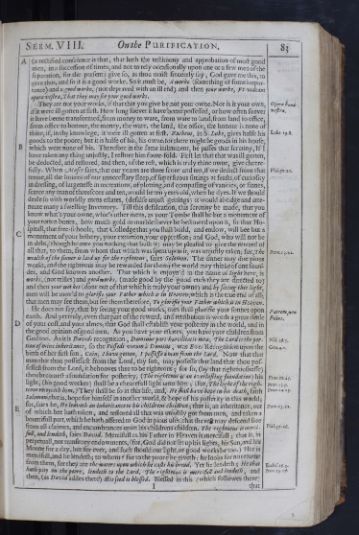 Serm. VIII.
On the Purification.
83
(a rectified conscience is that, that hath the restimony and approbation of most good
Serm. VIII.
On the Purification.
83
(a rectified conscience is that, that hath the restimony and approbation of most good
men, in a succession of times, and not to rely occasionally upon one or a few men of the
separation, for the present) give so, as thou maist sincerely say, God gave me this, to
give thus, and so it is a good worke. So it must be, A worke (something of some impor-
tance) and a good worke, (not depraved with an ill end) and then your worke, Vt videant
opera vestra, That they may see your good works.
They are not your works, if that that you give be not your owne. Nor is it your own, Opera bona
vestra.
if it were ill gotten at first. How long soever it have beene possessed, or how often soever
it have beene transformed, from money to ware, from ware to land, from land to office,
from office to honour, the money, the ware, the land, the office, the honour is none of
thine, if, in thy knowlege, it were ill gotten at first. Zacheus, in S. Luke, Luke 19.8. gives halfe his
goods to the poore; but it is halfe of his, his owne; for there might be goods in his house,
which were none of his. Therefore in the same instrument, he passes that scrutiny, If I
have taken any thing unjustly, I restore him foure-fold. First let that that was ill gotten,
be deducted, and restored, and then, of the rest, which is truly thine owne, give cheere-
fully. When Moses saies, that our yeares are three score and ten, Psal. 90.20. if we deduct from that
terme, all the houres of our unnecessary sleep, of superfluous sittings at feasts, of curiosity
in dressing, of largenesse in recreations, of plotting, and compassing of vanities, or sinnes,
scarce any man of threescore and ten, would be ten years old, when he dyes. If we should
deale so with worldly mens estates, (defalse unjust gettings) it would abridge and atte-
nuate many a swelling Inventory. Till this defalcation, this scrutiny be made, that you
know what's your owne, what's other mens, as your Tombe shall be but a monument of
your rotten bones, how much gold or marble soever be bestowed upon it, so that Ho-
spitall, that free-schoole, that Colledge that you shall build, and endow, will bee but a
monument of your bribery, your extortion, your oppression; and God, who will not be
in debt, (though he owe you nothing that built it) may be pleased to give the reward of
all that, to them, from whom that which was spent upon it, was unjustly taken; for, Prov. 13.22. The
wealth of the sinner is laid up for the righteous, saies Solomon. The sinner may doe pious
works, and the righteous may be rewarded for them; the world may thinke of one foun-
der, and God knowes another. That which is enjoyn'd in the name of light here, is
works, (not trifles) and good works, (made good by the good ends they are directed to)
and then your workes (done out of that which is truly your owne) and by seeing this light,
men will be mov'd to glorifie your Father which is in Heaven; which is the true end of all;
that men may see them, but see them therefore, To glorifie your Father which is in Heaven.
He does not say, that by seeing your good works, Patrem, non
Filios. men shall glorifie your sonnes upon
earth. And yet truly, even that part of the reward, and retribution is worth a great deale
of your cost, and your almes; that God shall establish your posterity in the world, and in
the good opinion of good men. As you have your estates, you have your children from
God too. As it is Davids recognition, Dominus pars hæreditatis meæ, Psal. 16.5.
Gen. 4.1. The Lord is the por-
tion of mine inheritance, so the Possedi virum à Domino, was Eves Recognition upon the
birth of her first son, Cain, I have gotten, I possesse a man from the Lord. Now that that
man that thou possessest from the Lord, thy son, may possesse that land that thou pos-
sessest from the Lord, it behooves thee to be righteous; for so, (by that righteousnesse)
thou becomest a foundation for posterity, Prov. 10.25.
Prov. 13.9.
Prov. 14.23. (The righteous is an everlasting foundation) his
light, (his good workes) shall be a chearefull light unto him; (for, The light of the righ-
teous reioyceth him.) They shall be so in this life, and, He shall have hope in his death, saith
Solomon; that is, hope for himself in another world, & hope of his posterity in this world;
for, saies he, He leaveth an inheritance to his childrens children; that is, an inheritance, Prov. 13.22. out
of which hee hath taken, and restored all that was unjustly got from men, and taken a
bountifull part, which he hath offered to God in pious uses, that the rest may descend free
from all claimes, and encumbrances upon his childrens children.Psal. 37.26. The righteous is merci-
full, and lendeth, saies David. Mercifull as his Father in Heaven is mercifull; that is, in
perpetuall, not transitory endowments, (for, God did not set up his lights, his Sun, and his
Moone for a day, but for ever, and such should our light, or good works be too.) Hee is
mercifull, and he lendeth; to whom? for to the poore he giveth; he looks for no returne
from them, for they are the waters upon which he casts his bread. Yet he lendeth;Eccles. 11.1.
Prov. 19.17. He that
hath pity on the poore, lendeth to the Lord. The righteous is mercifull and lendeth, and
then, (as David addes there) His seed is blessed. Blessed in this (which followes there) I that
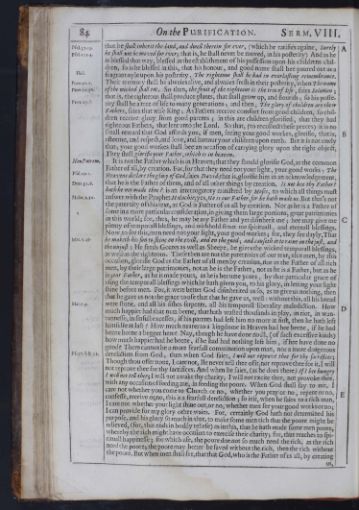 84
On the Purification.
Serm. VIII.
that he shall inherit the land, Psal. 37.29.
84
On the Purification.
Serm. VIII.
that he shall inherit the land, Psal. 37.29. Psal. 112.4. and dwell therein for ever, (which he ratifies againe, Surely
he shall not be moved for ever; that is, he shall never be moved, in his posterity) And as he
is blessed that way, blessed in the establishment of his possession upon his childrens chil-
dren, so is he blessed in this, that his honour, and good name shall bee poured out as a
fragrant oyle upon his posterity, Ibid. The righteous shall be had in everlasting remembrance.
Their memory shall be alwaies alive, Prov. 10.7.
Prov. 11.30. and alwaies fresh in their posterity, when The name
of the wicked shall rot. So then, the fruit of the righteous is the tree of life, saies Solomon;
that is, the righteous shall produce plants, that shall grow up, and flourish; so his poste-
rity shall be a tree of life to many generations;Prov. 17.6. and then, The glory of children are their
Fathers, saies that wise King; As Fathers receive comfort from good children, so chil-
dren receive glory from good parents; in this are children glorified, that they had
righteous Fathers, that lent unto the Lord. So that, (to recollect these peeces) it is no
small reward that God affords you, if men, seeing your good workes, glorifie, that is,
esteeme, and respect, and love, and honour your children upon earth. But it is not onely
that; your good workes shall bee an occasion of carrying glory upon the right object,
They shall glorifie your Father, which is in heaven.
It is not the Father which is in Heaven;Non Patrem. that they should glorifie God, as the common
Father of all, by creation. For, for that they need not your light, your good works; The
Heavens declare the glory of God, Psal. 19.1. saies David; that is, glorifie him in an acknowledgement,
that he is the Father of them, Deut. 32.6. and of all other things by creation. Is not hee thy Father?
hath he not made thee? is an interrogatory ministred by Moses, to which all things must
answer with the Prophet Malachie, Malac. 2.10. yes, He is our Father, for he hath made us. But that's not
the paternity of this text, as God is Father of us all by creation. Nor as he is a Father of
some in a more particular consideration, in giving them large portions, great patrimonies
in this world; for, thus, he may be my Father and yet disinherit me; hee may give me
plenty of temporall blessings, and withhold from me spirituall, and eternall blessings.
Now, to see this, men need not your light, your good workes; for, they see dayly, That
he maketh his sun to shine on the evill,Mat. 5.45. and on the good; and causeth it to raine on the just, and
the unjust; He feeds Goates as well as Sheepe, he gives the wicked temporall blessings,
as well as the righteous. These then are not the paternities of our text, that men, by this
occasion, glorifie God as the Father of all men by creation, nor as the Father of all rich
men, by their large patrimonies, not as he is the Father, not as he is a Father, but as he
is your Father, as he is made yours, as he is become yours, by that particular grace of
using the temporall blessings which he hath given you, to his glory, in letting your light
shine before men. For, it were better God disinherited us so, as to give us nothing, then
that he gave us not the grace to use that that he gave us, well: without this, all his bread
were stone, Mat. 7.9. and all his fishes serpents, all his temporall liberality malediction. How
much happier had that man beene, that hath wasted thousands in play, in riot, in wan-
tonnesse, in sinfull excesses, if his parents had left him no more at first, then he hath left
himselfe at last? How much nearer to a kingdome in Heaven had hee beene, if he had
beene borne a begger here? Nay, though he have done no ill, (of such excessive kinds)
how much happier had he beene, if he had had nothing left him, if hee have done no
good? There cannot be a more fearfull commination upon man, nor a more dangerous
dereliction from God, Ps. 50.8. & 12. then when God saies, I will not reprove thee for thy sacrifices;
Though thou offer none, I care not, Ile never tell thee of it, nor reprove thee for it, I will
not reprove thee for thy sacrifices. And when he saies, (as he does there) If I bee hungry
I will not tell thee; I will not awake thy charity, I will not excite thee, not provoke thee,
with any occasion of feeding me, in feeding the poore. When God shall say to me, I
care not whether you come to Church or no, whether you pray or no, repent or no,
confesse, receive or no, this is a fearfull dereliction; so is it, when he saies to a rich man,
I care not whether your light shine out, or no; whether men see your good works or no;
I can provide for my glory other waies. For, certainly God hath not determined his
purpose, and his glory so much in that, to make some men rich that the poore might be
relieved, (for, that ends in bodily reliefe) as in this, that he hath made some men poore,
whereby the rich might have occasion to exercise their charity; for, that reaches to spi-
rituall happinesse; for which use, the poore doe not so much need the rich, as the rich
need the poore; the poore may better be saved without the rich, then the rich without
the poore. But when men shall see, that that God, who is the Father of us all, by creating us
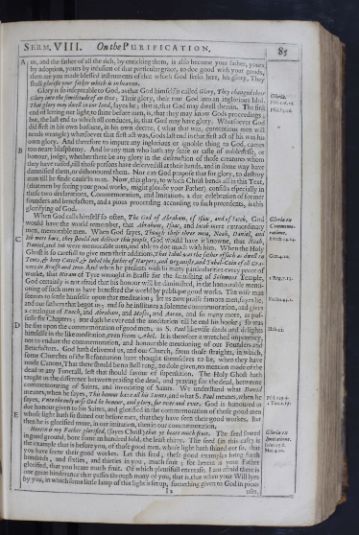 Serm. VIII.
On the Purification.
85
us, and the father of all the rich, by enriching them, is also become your father, yours
Serm. VIII.
On the Purification.
85
us, and the father of all the rich, by enriching them, is also become your father, yours
by adoption, yours by infusion of that particular grace, to doe good with your goods,
then are you made blessed instruments of that which God seeks here, his glory, They
shall glorifie your father which is in heaven.
Glory is so inseparable to God, as that God himself is called Glory, They changed their Gloria.
Glory into the similitude of an Oxe; Their glory, their true God into an inglorious Idol.Psal. 106.20.
Psal. 85.10.
That glory may dwell in our land, sayes he; that is, that God may dwell therein. The first
end of letting our light to shine before men, is, that they may know Gods proceedings;
but, the last end to which all conduces, is, that God may have glory. Whatsoever God
did first in his own bosome, in his own decree, (what that was, contentious men will
needs wrangle) whatsoever that first act was, Gods last end in that first act of his was his
own glory. And therefore to impute any inglorious or ignoble thing to God, comes
too neare blasphemy. And be any man who hath any sense or taste of noblenesse, or
honour, judge, whether there be any glory in the destruction of those creatures whom
they have raised, till those persons have deserved ill at their hands, and in some way have
damnified them, or dishonoured them. Nor can God propose that for glory, to destroy
man till he finde cause in man. Now, this glory, to which Christ bends all in this Text,
(that men by seeing your good works, might glorifie your Father) consists especially in
these two declarations, Commemoration, and Imitation; a due celebration of former
founders and benefactors, and a pious proceeding according to such precedents, is this
glorifying of God.
When God calls himself so often, The God of Abraham, of Isaac, and of Iacob, GodGloria ex
Commemo-
ratione.
Ezech. 14.14.
would have the world remember, that Abraham, Isaac, and Iacob were extraordinary
men, memorable men. When God sayes, Though these three men, Noah, Daniel, and
Iob were here, they should not deliver this people, God would have it knowne, that Noah,
Daniel, and Iob were memorable men, and able to doe much with him. When the Holy
Ghost is so carefull to give men their additions, Gen. 4.20. That Iabal was the father of such as dwell in
Tents, & keep Cattell, & Iubal the father of Harpers, and Organists, and Tubal-Cain of all Gra-
vers in Brasse and Iron. And when he presents with so many particularities every peece of
worke, that Hiram of Tyre wrought in Brasse for the furnishing of Solomons Temple, 1 Reg. 7.13.
God certainly is not afraid that his honour will be diminished, in the honourable menti-
oning of such men as have benefited the world by publique good works. The wise man
seemes to settle himselfe upon that meditation; let us now praise famous men, sayes he, Ecclus. 44.1.
and our fathers that begot us; and so he institutes a solemne commemoration, and gives
a catalogue of Enoch, and Abraham, and Moses, and Aaron, and so many more, as pos-
sesse six Chapters; nor doth he ever end the meditation till he end his booke; so was
he fixt upon the commemoration of good men;Heb. 11. as S. Paul likewise feeds and delights
himselfe in the like meditation, even from Abel. It is therefore a wretched impotency,
not to endure the commemoration, and honourable mentioning of our Founders and
Benefactors. God hath delivered us, and our Church, from those straights, in which,
some Churches of the Reformation have thought themselves to be, when they have
made Canons, That there should be no Bell rung, no dole given, no mention made of the
dead at any Funerall, lest that should savour of superstition. The Holy Ghost hath
taught us the difference between praising the dead, and praying for the dead, betweene
commemorating of Saints, and invocating of Saints. We understand what David
meanes, when he sayes, This honour have all his Saints, and what S. Paul meanes, Psal. 149.9.
1 Tim. 1.17. when he
sayes, Vnto the only wise God be honour, and glory, for ever and ever. God is honoured in
due honour given to his Saints, and glorified in the commemoration of those good men
whose light hath so shined out before men, that they have seen their good workes. But
then he is glorified more, in our imitation, then in our commemoration.
Herein is my Father glorified, (sayes Christ) that ye beare much fruit.Gloria ex
Imitatione.
Iohn 15.8.
Mar. 4.20. The seed sowed
in good ground, bore some an hundred fold, the least thirty. The seed (in this case) is
the example that is before you, of those good men, whose light hath shined out so, that
you have seene their good workes. Let this seed, these good examples bring forth
hundreds, and sixties, and thirties in you, much fruit; for herein is your Father
glorified, that you beare much fruit. Of which plentifull encrease, I am afraid there is
one great hinderance that passes through many of you, that is, that when your Will lyes
by you, in which some little lamp of this light is set up, something given to God in pious I2 uses
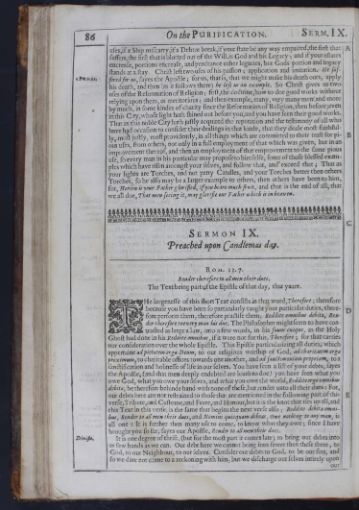 86
On the Purification.
Serm. VIII.
uses, if a Ship miscarry, if a Debtor break, if your state be any way empaired, the first that
86
On the Purification.
Serm. VIII.
uses, if a Ship miscarry, if a Debtor break, if your state be any way empaired, the first that
suffers, the first that is blotted out of the Will, is God and his Legacy; and if your estates
encrease, portions encrease, and perchance other legacies, but Gods portion and legacy
stands at a stay. Christ left two uses of his passion; application and imitation. He suf-
fered for us, 1 Pet. 2.22. sayes the Apostle; for us, that is, that we might make his death ours, apply
his death, and then (as it follows there) he left us an example. So Christ gives us two
uses of the Reformation of Religion; first, the doctrine, how to doe good works without
relying upon them, as meritorious; and then example, many, very many men (and more
by much, in some kindes of charity since the Reformation of Religion, then before) even
in this City, whose light hath shined out before you, and you have seen their good works.
That as this noble City hath justly acquired the reputation and the testimony of all who
have had occasion to consider their dealings in that kinde, that they deale most faithful-
ly, most justly, most providently, in all things which are committed to their trust for pi-
ous uses, from others, not only in a full employment of that which was given, but in an
improvement thereof, and then an employment of that emprovement to the same pious
use, so every man in his particular may propose to himselfe, some of those blessed exam-
ples which have risen amongst your selves, and follow that, and exceed that; That as
your lights are Torches, and not petty Candles, and your Torches better then others
Torches, so he also may be a larger example to others, then others have been to him,
for, Herein is your Father glorified, if you beare much fruit, and that is the end of all, that
we all doe, That men seeing it, may glorifie our Father which is in heaven.
Sermon IX.
Preached upon Candlemas day.
Rom. 13.7.
Render therefore to all men their dues.
The Text being part of the Epistle of that day, that yeare.
THeThe largenesse of this short Text consists in that word, Therefore; therefore
because you have been so particularly taught your particular duties, there-
fore perform them, therefore practise them, Reddite omnibus debita, Ren-
der therefore to every man his due. The Philosopher might seem to have con-
tracted as large a law, into a few words, in his suum cuique, as the Holy
Ghost had done in his Reddite omnibus, if it were not for this, Therefore; for that carries
our consideration over the whole Epistle. This Epistle particularizing all duties, which
appertaine ad pietatem erga Deum, to our religious worship of God, ad charitatem erga
proximum, to charitable offices towards one another, and ad sanctimoniam propriam, to a
sanctification and holinesse of life in our selves. You have seen a list of your debts, sayes
the Apostle, (and that men deeply endebted are loath to doe) you have seen what you
owe God, what you owe your selves, and what you owe the world, Reddite ergo omnibus
debita, be therefore behinde hand with none of these, but render unto all their dues: For,
our debts here are not restrained to those that are mentioned in the following part of this
verse, Tribute, and Custome, and Feare, and Honour, but it is the knot that ties up all, and
this Text in this verse, is the same that begins the next verse also; Reddite debita omni-
bus, Render to all men their dues, and Nemini quicquam debeas, Owe nothing to any man, is
all one: It is farther then many use to come, to know what they owe; since I have
brought you so far, sayes our Apostle, Render to all men their dues.
It is one degree of thrift, Divisio. (but for the most part it comes late) to bring our debts into
as few hands as we can. Our debt here we cannot bring into fewer then these three, to
God, to our Neighbour, to our selves. Consider our debts to God, to be our sins, and
so we dare not come to a reckoning with him, but we discharge our selves intirely upon our
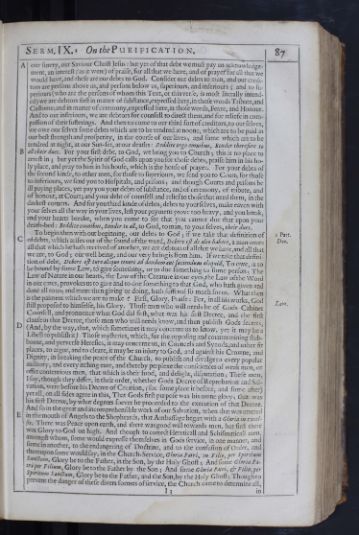 Serm. IX.
On the Purification.
87
our surety, our Saviour Christ Jesus: but yet of that debt we must pay an acknowledge-
Serm. IX.
On the Purification.
87
our surety, our Saviour Christ Jesus: but yet of that debt we must pay an acknowledge-ment, an interest (as it were) of praise, for all that we have, and of prayer for all that we
would have, and these are our debts to God. Consider our debts to man, and our credi-
tors are persons above us, and persons below us, superiours, and inferiours; and to su-
periours (who are the persons of whom this Text, or this verse, is most literally intend-
ed) we are debtors first in matter of substance, expressed here, in those words Tribute, and
Custome; and in matter of ceremony, expressed here, in those words, Feare, and Honour.
And to our inferiours, we are debtors for counsell to direct them, and for reliefe in com-
passion of their sufferings. And then to come to our third sort of creditors, to our selves,
we owe our selves some debts which are to be tendred at noone, which are to be paid in
our best strength and prosperity, in the course of our lives; and some which are to be
tendred at night, at our Sun-set, at our deaths: Reddite ergo omnibus, Render therefore to
all their dues. For your first debt, to God, we bring you to Church; this is no place to
arrest in; but yet the Spirit of God calls upon you for those debts, praise him in his ho-
ly place, and pray to him in his house, which is the house of prayer. For your debts of
the second kinde, to other men, for those to superiours, we send you to Court; for those
to inferiours, we send you to Hospitals, and prisons; and though Courts and prisons be
ill paying places, yet pay you your debts of substance, and of ceremony, of tribute, and
of honour, at Court; and your debt of counsell and relief to those that need them, in the
darkest corners. And for youyour third kinde of debts, debts to your selves, make eaven with
your selves all the way in your lives, lest your payment prove too heavy, and you break,
and your hearts breake, when you come to see that you cannot doe that upon your
death-bed: Reddite omnibus, Render to all, to God, to man, to your selves, their dues. To begin then with our beginning, our debts to God;1 Part. if we take that definition of
of of
debts, which arises out of the sound of the word, Debere est de alio habere, a man owes Deo.
all that which he hath received of another, we are debtors of all that we have, and all that
we are, to God; our well being, and our very being is from him. If we take that defini-
tion of debt, Debere est Iure aliquo teneri ad dandum aut facìendum aliquid, To owe, is to
be bound by some Law, to give something, or to doe something to some person; The
Law of Nature in our hearts, the Law of the Creature in our eyes, the Law of the Word
in our eares, provokes us to give and to doe something to that God, who hath given and
done all to us; and more then giving or doing, hath suffered so much for us. What then
is the paiment which we are to make? First, Glory, Praise: For, in all his works, Laus. God
still proposed to himselfe, his Glory. Those men who will needs be of Gods Cabinet
Counsell, and pronounce what God did first, what was his first Decree, and the first
clause in that Decree, those men who will needs know, and then publish Gods secrets,
(And, by the way, that, which sometimes it may concerne us to know, yet it may be a
Libell to publish it) Those mysteries, which, for the opposing and countermining stub-
borne, and perverse Heresies, it may concerne us, in Councels and Synods, and other fit
places, to argue, and to cleare, it may be an injury to God, and against his Crowne, and
Dignity, in breaking the peace of the Church, to publish and divulge to every popular
auditory, and every itching eare, and thereby perplexe the consciences of weak men, or
offer contentious men, that which is their food, and delight, disputation; These men,
I say, though they differ, in their order, whether Gods Decree of Reprobation and Sal-
vation, were before his Decree of Creation, (for some place it before, and some after)
yet all, on all sides agree in this, That Gods first purpose was his owne glory; that was
his first Decree, by what degrees soever he proceeded to the execution of that Decree.
And so in the great and incomprehensible work of our Salvation, when that was uttered
in the mouth of Angels to the Shepheards, that Ambassage began with a Gloria in excel-
sis, There was Peace upon earth, and there was good will towards men, but first there
was Glory to God on high. And though to correct Hereticall and Schismaticall men,
amongst whom, some would expresse themselves in Gods service, in one manner, and
some in another, to the endangering of Doctrine, and to the confusion of Order, and
thereupon some would say, in the Church-Service, Gloria Patri, in Filio, per Spiritum
Sanctum, Glory be to the Father, in the Son, by the Holy Ghost; And some Gloria Pa-
tri per Filium, Glory be to the Father by the Son; And some Gloria Patri, & Filio, per
Spiritum Sanctum, Glory be to the Father, and the Son, by the Holy Ghost; Though to
prevent the danger of these divers formes of service, the Church came to determine all, I3 in
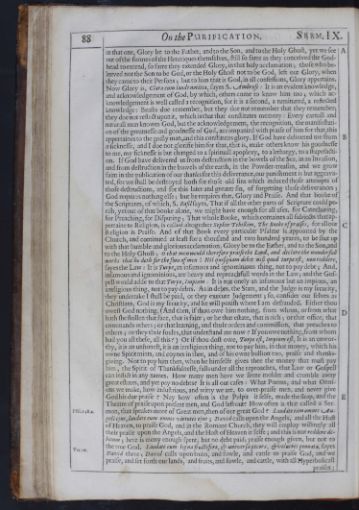 88
On the Purification.
Serm. IX.
in that one, Glory be to the Father, and to the Son, and to the Holy Ghost, yet we see
88
On the Purification.
Serm. IX.
in that one, Glory be to the Father, and to the Son, and to the Holy Ghost, yet we see
out of the formes of the Heretiques themselves, still so farre as they conceived the God-
head to extend, so farre they extended Glory, in that holy acclamation; those who be-
leeved not the Son to be God, or the Holy Ghost not to be God, left out Glory, when
they came to their Persons; but to him that is God, in all confessions, Glory appertains.
Now Glory is, Clara cum laude notitia, sayes S. Ambrose: It is an evident knowledge,
and acknowledgement of God, by which, others come to know him too; which ac-
knowledgement is well called a recognition, for it is a second, a ruminated, a reflected
knowledge: Beasts doe remember, but they doe not remember that they remember;
they doe not reflect upon it, which is that that constitutes memory: Every carnall and
naturall man knowes God, but the acknowledgement, the recognition, the manifestati-
on of the greatnesse and goodnesse of God, accompanied with praise of him for that, this
appertaines to the godly man, and this constitutes glory. If God have delivered me from
a sicknesse, and I doe not glorifie him for that, that is, make others know his goodnesse
to me, my sicknesse is but changed to a spirituall apoplexy, to a lethargy, to a stupefacti-
on. If God have delivered us from destruction in the bowels of the Sea, in an Invasion,
and from destruction in the bowels of the earth, in the Powder-treason, and we grow
faint in the publication of our thanks for this deliverance, our punishment is but aggrava-
ted, for we shall be destroyed both for those old sins which induced those attempts of
those destructions, and for this later and greater sin, of forgetting those deliverances;
God requires nothing else; but he requires that, Glory and Praise. And that booke of
the Scriptures, of which, S. Basil sayes, That if all the other parts of Scripture could pe-
rish, yet out of that booke alone, we might have enough for all uses, for Catechizing,
for Preaching, for Disputing; That whole Booke, which containes all subjects that ap-
pertaine to Religion, is called altogether Sepher Tehillim, The Booke of praises, for all our
Religion is Praise. And of that Book every particular Psalme is appointed by the
Church, and continued at least for a thousand and two hundred yeares, to be shut up
with that humble and glorious acclamation. Glory be to the Father, and to the Son, and
to the Holy Ghost; O that men would therefore praise the Lord, and declare the wonderfull
works that he doth for the sons of men! Nil quisquam debet nisi quod turpe est, non reddere,
sayes the Law: It is Turpe, an infamous and ignominious thing, not to pay debt; And,
infamous and ignominious, are heavy and reproachfull words in the Law; and the Gos-
pell would adde to that Turpe, Impium: It is not onely an infamous but an impious, an
irreligious thing, not to pay debts. As in debts, the State, and the Judge is my security,
they undertake I shall be paid, or they execute Judgement; so, consider our selves as
Christians, God is my security, and he will punish where I am defrauded. Either thou
owest God nothing, (And then, if thou owe him nothing, from whom, or from what
hath she stollen that face, that is faire; or he that estate, that is rich; or that office, that
commands others; or that learning, and those orders and commission, that preaches to
others; or they their soules, that understand me now? If you owe nothing, from whom
had you all these, all this?) Or if thou dost owe, Turpe est, Impium est, It is an unwor-
thy, it is an unhonest, it is an irreligious thing, not to pay him, in that money, which his
owne Spirit mints, and coynes in thee, and of his owne bullion too, praise and thanks-
giving. Not to pay him then, when he himselfe gives thee the money that must pay
him, the Spirit of Thankfulnesse, falls under all the reproaches, that Law or Gospell
can inflict in any names. How many men have we seene molder and crumble away
great estates, and yet pay no debts? It is all our cases: What Poems, and what Orati-
ons we make, how industrious, and witty we are, to over-praise men, and never give
God his due praise? Nay how often is the Pulpit it selfe, made the shop, and the
Theatre of praise upon present men, and God left out? How often is that called a Ser-
mon, that speakes more of Great men, Psal. 148.2. then of our great God? Laudate eum omnes An-
geli ejus, laudate eum omnes virtutes ejus; David calls upon the Angels, and all the Host
of Heaven, to praise God, and in the Romane Church, they will employ willingly all
their praise upon the Angels, and the Host of Heaven it selfe; and this is not reddere de-
bitum; here is mony enough spent, but no debt paid; praise enough given, but not to
the true God.Ver. 10. Laudate eum ligna fructifera, & universa pecora, & volucres pennatæ, sayes
David there; David calls upon fruits, and fowle, and cattle to praise God, and we
praise, and set forth our lands, and fruits, and fowle, and cattle, with all Hyperbolicall praises
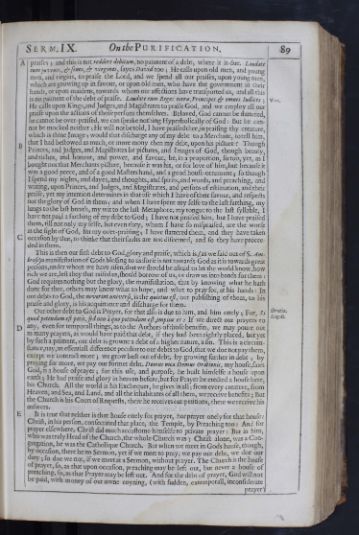 Serm. IX.
On the Purification.
89
praises; and this is not reddere debitum, no paiment of a debt, where it is due. Laudate
Serm. IX.
On the Purification.
89
praises; and this is not reddere debitum, no paiment of a debt, where it is due. Laudate
eum juvenes, & senes, & virgines, sayes David too; He calls upon old men, and young
men, and virgins, to praise the Lord, and we spend all our praises, upon young men,
which are growing up in favour, or upon old men, who have the government in their
hands, or upon maidens, towards whom our affections have transported us, and all this
is no paiment of the debt of praise. Laudate eum Reges terræ, Principes & omnes Iudices; V. 11.
He calls upon Kings, and Judges, and Magistrates to praise God, and we employ all our
praise upon the actions of those persons themselves. Beloved, God cannot be flattered,
he cannot be over-praised, we can speake nothing Hyperbolically of God: But he can-
not be mocked neither; He will not be told, I have praised thee, in praising thy creature,
which is thine Image; would that discharge any of my debt to a Merchant, to tell him,
that I had bestowed as much, or more mony then my debt, upon his picture? Though
Princes, and Judges, and Magistrates be pictures, and Images of God, though beauty,
and riches, and honour, and power, and favour, be, in a proportion, so too, yet, as I
bought not that Merchants picture, because it was his, or for love of him, but because it
was a good peece, and of a good Masters hand, and a good house-ornament; so though
I spend my nights, and dayes, and thoughts, and spirits, and words, and preaching, and
writing, upon Princes, and Judges, and Magistrates, and persons of estimation, and their
praise, yet my intention determines in that use which I have of their favour, and respects
not the glory of God in them; and when I have spent my selfe to the last farthing, my
lungs to the last breath, my wit to the last Metaphore, my tongue to the last syllable, I
have not paid a farthing of my debt to God; I have not praised him, but I have praised
them, till not only my selfe, but even they, whom I have so mispraised, are the worse
in the sight of God, for my over-praising; I have flattered them, and they have taken
occasion by that, to thinke that their faults are not discerned, and so they have procee-
ded in them. This is then our first debt to God, glory and praise, which is, (as we said out of S. Am-
brose) a manifestation of Gods blessing to us: for it is not towards God as it is towards great
persons, under whom we have risen, that we should be afraid to let the world know, how
rich we are, lest they that raised us, should borrow of us, or draw us into bands for them:
God requires nothing but the glory, the manifestation, that by knowing what he hath
done for thee, others may know what to hope, and what to pray for, at his hands: In
our debts to God, the noverint universi, is the quietus est, our publishing of them, to his
praise and glory, is his acquittance and discharge for them. Our other debt to God is Prayer, for that also is due to him, and him onely; For, Oratio. Si
quod petendum est petis, sed non à quo petendum est, impius es: If we direct our prayers to August.
any, even for temporall things, as to the Authors of those benefits, we may poure out
as many prayers, as would have paid that debt, if they had been rightly placed, but yet
by such a paiment, our debt is growne a debt of a higher nature, a sin. This is a circum-
stance, nay, an essentiall difference peculiar to our debts to God, that we doe not pay them,
except we contract more; we grow best out of debt, by growing farther in debt; by
praying for more, we pay our former debt. Domus mea Domus Orationis, my house, saies
God, is a house of prayer; for this use, and purpose, he built himselfe a house upon
earth; He had praise and glory in heaven before, but for Prayer he erected a house here,
his Church. All the world is his Exchequer, he gives in all; from every creature, from
Heaven, and Sea, and Land, and all the inhabitants of all them, we receive benefits; But
the Church is his Court of Requests, there he receives our petitions, there we receive his
answers. It is true that neither is that house onely for prayer, nor prayer onely for that house:
Christ, in his person, consecrated that place, the Temple, by Preaching too: And for
prayer elsewhere, Christ did much accustome himselfe to private prayer: But in him,
who was truly Head of the Church, the whole Church was; Christ alone, was a Con-
gregation, he was the Catholique Church. But when we meet in Gods house, though,
by occasion, there be no Sermon, yet if we meet to pray, we pay our debt, we doe our
duty; so doe we not, if we meet at a Sermon, without prayer. The Church is the house
of prayer, so, as that upon occasion, preaching may be left out, but never a house of
preaching, so, as that Prayer may be left out. And for the debt of prayer, God will not
be paid, with money of our owne coyning, (with sudden, extemporall, inconsiderate prayer)
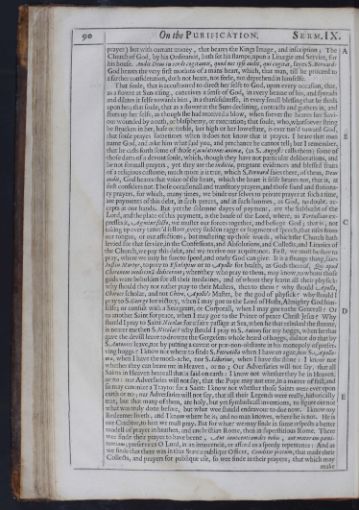 90
On the Purification.
Serm. IX.
prayer) but with currant money, that beares the Kings Image, and inscription; The
90
On the Purification.
Serm. IX.
prayer) but with currant money, that beares the Kings Image, and inscription; The
Church of God, by his Ordinance, hath fet his stampe, upon a Liturgie and Service, for
his house. Audit Deus in corde cogitantis, quod nec ipse audit, qui cogitat, sayes S. Bernard:
God heares the very first motions of a mans heart, which, that man, till he proceed to
a farther consideration, doth not heare, not feele, not deprehend in himselfe.
That soule, that is accustomed to direct her selfe to God, upon every occasion, that,
as a flowre at Sun-rising, conceives a sense of God, in every beame of his, and spreads
and dilates it selfe towards him, in a thankfulnesse, in every small blessing that he sheds
upon her; that soule, that as a flowre at the Suns declining, contracts and gathers in, and
shuts up her selfe, as though she had received a blow, when soever she heares her Savi-
our wounded by a oath, or blasphemy, or execration; that soule, who, whatsoever string
be strucken in her, base or treble, her high or her low estate, is ever tun'd toward God,
that soule prayes sometimes when it does not know that it prayes. I heare that man
name God, and aske him what said you, and perchance he cannot tell; but I remember,
that he casts forth some of those ejaculationes animæ, (as S. August: calls them) some of
those darts of a devout soule, which, though they have not particular deliberations, and
be not formall prayers, yet they are the indicia, pregnant evidences and blessed fruits
of a religious custome; much more is it true, which S. Bernard saies there, of them, Deus
audit, God heares that voice of the heart, which the heart it selfe heares not, that is, at
first considers not. Those occasionall and transitory prayers, and those fixed and stationa-
ry prayers, for which, many times, we binde our selves to private prayer at such a time,
are payments of this debt, in such peeces, and in such summes, as God, no doubt, ac-
cepts at our hands. But yet the solemne dayes of payment, are the Sabbaths of the
Lord, and the place of this payment, is the house of the Lord, where, as Tertullian ex-
presses it, Agmine facto, we muster our forces together, and besiege God; that is, not
taking up every tatter'd fellow, every sudden ragge or fragment of speech, that rises from
our tongue, or our affections, but mustering up those words, which the Church hath
levied for that service, in the Confessions, and Absolutions, and Collects, and Litanies of
the Church, we pay this debt, and we receive our acquittance. First, we must be sure to
pray, where we may be sure to speed, and onely God can give. It is a strange thing, saies
Iustin Martyr, to pray to Esculapius or to Apollo for health, as Gods thereof, Qui apud
Chironem medicinā didicerunt; when they who pray to them, may know, to whom those
gods were beholden for all their medicines, and of whom they learnt all their physick:
why should they not rather pray to their Masters, then to them? why should Apollo,
Chiroes scholar, and not Chiro, Apollo's Master, be the god of physick? why should I
pray to S. George for victory, when I may goe to the Lord of Hosts, Almighty God him-
selfe; or consult with a Seargeant, or Corporall, when I may goe to the Generall? Or
to another Saint for peace, when I may goe to the Prince of peace Christ Jesus? Why
should I pray to Saint Nicolas for a faire passage at Sea, when he that rebuked the storme,
is nearer me then S. Nicolas? why should I pray to S. Antony for my hoggs, when he that
gave the devill leave to drowne the Gergesens whole heard of hoggs, did not do that by
S. Antonies leave, nor by putting a caveat or præ-non-obstante in his monopoly of preser-
ving hoggs? I know not where to finde S. Petronilla when I have an ague, nor S. Apollo-
nia, when I have the tooth-ache, nor S. Liberius, when I have the stone: I know not
whether they can heare me in Heaven, or no; Our Adversaries will not say, that all
Saints in Heaven heare all that is said on earth: I know not whether they be in Heaven,
or no: our Adversaries will not say, that the Pope may not erre, in a matter of fact, and
so may canonize a Traytor for a Saint: I know not whether those Saints were ever upon
earth or no; our Adversaries will not say, that all their Legends were really, historically
true, but that many of them, are holy, but yet symbolicall inventions, to figure out not
what was truly done before, but what wee should endeavour to doe now. I know my
Redeemer liveth, and I know where he is; and no man knowes, where he is not. He is
our Creditor, to him we must pray. But for what? we may finde in some respects a better
modell of prayer in heathen, and unchristian Rome, then in superstitious Rome. There
wee finde their prayer to have beene, Aut innocentiam des nobis, aut maturam pœni-
tentiam; preserve us O Lord, in an innocencie, or afford us a speedy repentance: And as
we finde that there was in that State a publique Officer, Conditor precum, that made their
Collects, and prayers for publique use, so wee finde in their prayers, that which may make
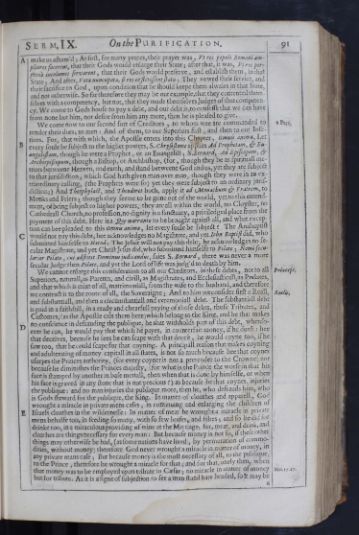 Serm. IX.
On the Purification.
91
make us asham'd; At first, for many yeares, their prayer was, Vt res populi Romani am-
Serm. IX.
On the Purification.
91
make us asham'd; At first, for many yeares, their prayer was, Vt res populi Romani am-pliores facerent, that their Gods would enlarge their State; after that, it was, Vt res per-
petuò incolumes servarent, that their Gods would preserve, and establish them, in that
State; And after, Vota nuncupata, si res eo stetissent statu; They vowed their service, and
their sacrifice to God, upon condition that he should keepe them alwaies in that State,
and not otherwise. So far therefore they may be our example, that they contented them-
selves with a competency, but not, that they made themselves Judges of that competen-
cy. We come to Gods house to pay a debt, and our debt is, to confesse that we can have
from none but him, nor desire from him any more, then he is pleased to give.
We come now to our second sort of Creditors, 2 Part. to whom wee are commanded to
render their dues; to men: And of them, to our Superiors first, and then to our Infe-
riors. For, that with which, the Apostle enters into this Chapter, Omnis anima, Let
every soule be subject to the higher powers, S. Chrysostome applies Ad Prophetam, & Eu-
angelistam, though he were a Prophet; or an Euangelist; S. Bernard, Ad Episcopum, &
Archiepiscopum, though a Bishop, or Archbishop, (for, though they be as spirituall me-
teors betweene Heaven, and earth, and stand betweene God and us, yet they are subject
to that jurisdiction, which God hath given man over man, though they were in an ex-
traordinary calling, (the Prophets were so) yet they were subject to an ordinary juris-
diction;) And Theophylact, and Theodoret both, apply it ad Monachum & Fratrem, to
Monks and Friers; though they seeme to be gone out of the world, yet to this entend-
ment, of being subject to higher powers, they are all within the world, no Cloyster, no
Cathedrall Church, no profession, no dignity is a sanctuary, a priviledged place from the
payment of this debt. Here is a Quo warranto to be brought against all, and what excep-
tion can bee pleaded to this Omnis anima, let every soule be subject? The Anabaptist
would not pay this debt, hee acknowledges no Magistrate, and yet Iohn Baptist did, who
submitted himselfe to Herod; The Jesuit will not pay this debt, he acknowledges no se-
cular Magistrate, and yet Christ Jesus did, who submitted himselfe to Pilate; Nemo secu-
larior Pilato, cui adstitit Dominus judicandus, saies S. Bernard, there was never a more
secular Judge then Pilate, and yet the Lord of life was judg'd to death by him.
We cannot enlarge this consideration to all our Creditors, in these debts, Princeps. not to all
Superiors, naturall, as Parents, and civill, as Magistrates, and Ecclesiasticall, as Prelates,
and that which is mixt of all, matrimoniall, from the wife to the husband, and therefore
we contract it to the roote of all, the Soveraigne; And to him we consider first a Reall,
Realis. and substantiall, and then a circumstantiall and ceremoniall debt. The substantiall debt
is paid in a faithfull, in a ready and chearfull paying of those debts, those Tributes, and
Customes, (as the Apostle cals them here) which belong to the King, and he that makes
no conscience in defrauding the publique, he that withholds part of this debt, whenso-
ever he can, he would pay that which he payes, in counterfait money, if he durst: hee
that deceives, because he sees he can scape with that deceit, he would coyne too, if he
saw too, that he could scape for that coyning. A principall reason that makes coyning
and adulterating of money capitall in all states, is not so much because hee that coynes
usurpes the Princes authority, (for every coyner is not a pretender to the Crowne) nor
because he diminishes the Princes majesty, (for what is the Prince the worse in that his
face is stamped by another in base mettall, then when that is done by himselfe, or when
his face is graved in any stone that is not precious?) as because he that coynes, injuries
the publique: and no man injuries the publique more, then he, who defrauds him, who
is Gods steward for the publique, the King. In matter of cloathes and apparell, God
wrought a miracle in private mens cases, in continuing and enlarging the children of
Israels cloathes in the wildernesse: In matter of meat he wrought a miracle in private
mens behalfe too, in feeding so many, with so few loafes, and fishes; and so he did for
drinke too, in a miraculous providing of wine at the Marriage; for, meat, and drink, and
cloathes are things necessary for every man: But because money is not so, if these other
things may otherwise be had, (as some nations have lived, by permutation of commo-
dities, without money) therefore God never wrought a miracle in matter of money, in
any private mans case; But because money is the most necessary of all, to the publique,
to the Prince, therefore he wrought a miracle for that; and for that, onely then, when
that money was to be employed upon tribute to Cæsar;Mat. 17.27. no miracle in matter of money
but for tribute. As it is a signe of subjection to see a man stand bare headed, so it may be a
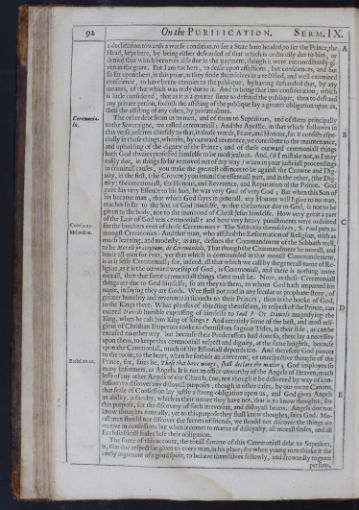 92
On the Purification.
Serm. IX.
a declination towards a worse condition, to see a State bare headed, to see the Prince, the
92
On the Purification.
Serm. IX.
a declination towards a worse condition, to see a State bare headed, to see the Prince, the
Head, kept bare, by being either defrauded of that which is ordinarily due to him, or
denied that which becomes also due in the payment, though it were extraordinarily gi-
ven in the grant. But I am not here, to deale upon affections, but consciences, and but
so far upon them, in this point, as they finde themselves in a rectified, and well examined
conscience, to have beene enemies to the publique, by having defrauded that, by any
meanes, of that which was truly due to it. And to bring that into consideration, which
is little considered, that as it is a greater sinne to defraud the publique, then to defraud
any private person, so doth the assisting of the publique lay a greater obligation upon us,
then the assisting of any other, by private almes.
The other debt from us to men, Ceremonia-
lis. and of them to Superiours, and of them principally
to the Soveraigne, we called ceremoniall; And the Apostle, in that which followes in
this verse, referres chiefely to that, in those words, Feare, and Honour, for it consists espe-
cially in those things, wherein, by outward reverence, we contribute to the maintenance,
and upholding of the dignity of the Prince; and of these outward ceremoniall things
hath God alwaies professed himselfe to be most jealous. And, (if I mistake not, as I may
easily doe, in things so far removed out of my way) when in your judiciall proceedings
in criminall causes, you make the greatest offences to be against the Crowne and Dig-
nity, in the first, (the Crowne) you intend the essentiall part, and in the other, (the Dig-
nity) the ceremoniall, the Honour, and Reverence, and Reputation of the Prince. God
gave his very Essence to his Son, he was very God of very God; But when this Son of
his became man, that which God sayes in generall, my Honour will I give to no man,
reaches so far to the Son of God himselfe, as that the honour due to God, is not to be
given to the body, not to the manhood of Christ Jesus himselfe. How very great a part
of the Law of God was ceremoniall? and how very heavy punishments were ordained
for the breakers even of those Ceremonies?Colos. 2.17. The Sabbaths themselves, S. Paul puts a-
mongst Ceremonies: And that man, who assisted the Reformation of Religion, with as Melancton.
much learning, and modesty, as any, defines the Commandment of the Sabbath well,
to be Morale præceptum, de Ceremoniali, That though the Commandment be morall, and
binde all men for ever, yet that which is commanded in that morall Commandement,
is in it selfe Ceremoniall; for, indeed, all that which we call by the generall name of Re-
ligion, as it is the outward worship of God, is Ceremoniall, and there is nothing more
morall, then that some ceremoniall things there must be. Now, as these Ceremoniall
things are due to God himselfe, so are they to them, to whom God hath imparted his
name, in saying they are Gods. Wee shall not read in any secular or prophane story, of
greater humility and reverence in subjects to their Princes, then in the booke of God,
to the Kings there. What phrases of abjecting themselves, in respect of the Prince, can
exceed Davids humble expressing of himselfe to Saul? Or Daniels magnifying the
King, when he cals him King of Kings? And certainly some of the best, and most reli-
gious of Christian Emperors tooke to themselves so great Titles, in their stile, as can be
excused no other way, but because their Predecessors had done so, there lay a necessity
upon them, to keepe this ceremoniall respect and dignity, at the same heighth, because
upon the Ceremoniall, much of the Essentiall depends too. And therefore God pierces
to the roote, to the heart, when he forbids an irreverent, or unrespective thought of the
Prince, Eccles. 10.20. for, saies he, Those that have wings, shall declare the matter; God imployes so
many Informers, as Angels; It is not an office unworthy of the Angels of Heaven, much
lesse of any other Angels of the Church, (no, not though it be delivered by way of con-
fession) to discover any disloyall purposes; though in other cases, by our owne Canons,
that seale of Confession lay justly a strong obligation upon us, and God gives Angels
an ability, a faculty, which in their nature they have not, that is, to know thoughts, for
this purpose, for the discovery of such irreverent, and disloyall hearts. Angels doe not
know thoughts naturally, yet to this purpose they shall know thoughts, saies God. Mo-
rall men should not discover the secrets of friends, we should not discover the things we
receive in confession; but when it comes to matter of disloyalty, all morall seales, and all
Ecclesiasticall seales lose their obligation.
The foote of this account, the totall summe of this Ceremoniall debt to Superiors,
is, that due respect be given to every man, in his place; for when young men thinke it the
onely argument of a good spirit, to behave themselves fellowly, and frowardly to great persons,
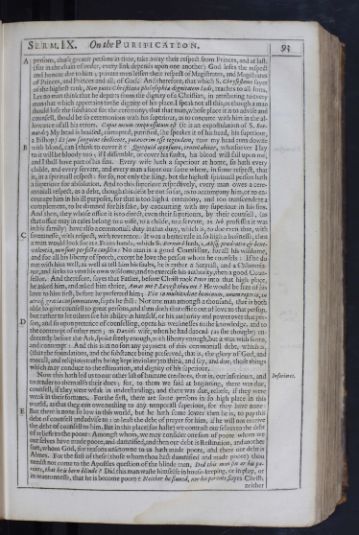 Serm. IX.
On the Purification.
93
persons, those greater persons in time, take away their respect from Princes, and at last,
Serm. IX.
On the Purification.
93
persons, those greater persons in time, take away their respect from Princes, and at last,
(for in the chain of order, every link depends upon one another) God loses the respect
and honour due to him; private men lessen their respect of Magistrates, and Magistrates
of Princes, and Princes and all, of God. And therefore, that which S. Chrysostome sayes
of the highest rank, Non putes Christianæ philosophiæ dignitatem lædi, reaches to all sorts,
Let no man think that he departs from the dignity of a Christian, in attributing to every
man that which appertains to the dignity of his place. I speak not all this, as though a man
should lose the substance for the ceremony, that that man, whose place it is to advise and
counsell, should be so ceremonious with his superiour, as to concurre with him in the al-
lowance of all his errors. Caput meum conquassatum est (it is an expostulation of S. Ber-
nards) My head is bruised, corrupted, putrified, (he speakes it of his head, his superiour,
a Bishop) Et jam sanguine ebulliente, putaverim esse tegendum, now my head runs downe
with blood, can I think to cover it? Quicquid apposuero, cruentabitur, whatsoever I lay
to it will be bloody too; if I dissemble, or cover his faults, his blood will fall upon me,
and I shall have part of his sins. Every wife hath a superiour at home, so hath every
childe, and every servant, and every man a superiour some where, in some respect, that
is, in a spirituall respect: for so, not only the King, but the highest spirituall person hath
a superiour for absolution. And to this superiour respectively, every man owes a cere-
moniall respect, as a debt, though this debt be not so far, as to accompany him, or to en-
courage him in his ill purposes, for that is too high a ceremony, and too transcendent a
complement, to be damned for his sake, by concurring with my superiour in his sins.
And then, they whose office it is to direct, even their superiours, by their counsell, (as
that office may in cases belong to a wife, to a childe, to a servant, as Iob professes it was
in his family) have also a ceremoniall duty in that duty, which is, to doe even that, with
sweetnesse, with respect, with reverence. It was a better rule in so high a businesse, then
a man would look for at a Friars hands, which S. Bernard hath, Abs{que} prudentia & bene-
volentia, non sunt perfecta consilia: No man is a good Counsellor, for all his wisdome,
and for all his liberty of speech, except he love the person whom he counsels: If he do
not wish him well, as well as tell him his faults, he is rather a Satyrist, and a Calumnia-
tor, and seeks to vent his own wisdome, and to exercise his authority, then a good Coun-
sellor. And therefore, sayes that Father, before Christ took Peter into that high place,
he asked him, and asked him thrice, Amas me? Lovest thou me? He would be sure of his
love to him first, before he preferred him; Vix in multitudine hominum, unum reperio, in
utra{que} gratia consummatum, sayes he still: Not one man amongst a thousand, that is both
able to give counsell to great persons, and then doth that office out of love to that person,
but rather to let others see his ability in himself, or his authority and power over that per-
son, and so upon pretence of counselling, opens his weaknesses to the knowledge, and to
the contempt of other men; as Davids wife, when he had danced (as she thought) un-
decently before the Ark, spoke freely enough, with liberty enough, but it was with scorn,
and contempt: And this is in no sort any payment of this ceremoniall debt, which is,
(that the foundations, and the substance being preserved, that is, the glory of God, and
morall, and religious truths being kept inviolate) to think, and say, and doe, those things
which may conduce to the estimation, and dignity of his superiour.
Now this hath led us to our other list of humane creditors, that is, our inferiours, Inferiores. and
to render to them also their dues; for, to them we said at beginning, there was due,
counsell, if they were weak in understanding; and there was due, reliefe, if they were
weak in their fortunes. For the first, there are some persons in so high place in this
world, as that they can owe nothing to any temporall superiour, for they have none:
But there is none so low in this world, but he hath some lower then he is, to pay this
debt of counsell and advise to: at least the debt of prayer for him, if he will not receive
the debt of counsell to him. But in this place (for haste) we contract our selves to the debt
of reliefe to the poore: Amongst whom, we may consider one sort of poore whom we
our selves have made poore, and damnified, and then our debt is Restitution, and another
sort, whom God, for reasons unknowne to us hath made poore, and there our debt is
Almes. For the first of these (those whom thou hast damnified and made poore) thou
needst not come to the Apostles question of the blinde man, Did this man sin or his pa-
rents, that he is born blinde? Did this man waste himselfe in house-keeping, or in play, or
in wantonnesse, that he is become poore? Neither he sinned, nor his parents, sayes Christ; neither
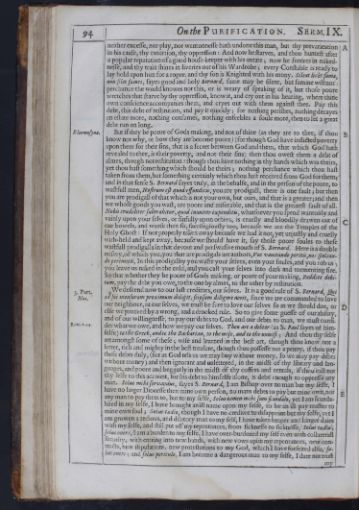 94
On the Purification.
Serm. IX.
neither excesse, nor play, nor wantonnesse hath undone this man, but thy prevarication
94
On the Purification.
Serm. IX.
neither excesse, nor play, nor wantonnesse hath undone this man, but thy prevarication
in his cause, thy extortion, thy oppression: And now he starves, and thou huntest after
a popular reputation of a good house-keeper with his meate; now he freezes in naked-
nesse, and thy train shines in liveries out of his Wardrobe; every Constable is ready to
lay hold upon him for a rogue, and thy son is Knighted with his mony. Sileat licèt fama,
non silet fames, sayes good and holy Bernard, fame may be silent, but famine will not:
perchance the world knowes not this, or is weary of speaking of it, but those poore
wretches that starve by thy oppression, know it, and cry out in his hearing, where thine
own conscience accompanies them, and cryes out with them against thee. Pay this
debt, this debt of restitution, and pay it quickly; for nothing perishes, nothing decayes
an estate more, nothing consumes, nothing enfeebles a soule more, then to let a great
debt run on long.
But if they be poore of Gods making, Eleemosyna. and not of thine (as they are to thee, if thou
know not why, or how they are become poore) (for though God have inflicted poverty
upon them for their sins, that is a secret between God and them, that which God hath
revealed to thee, is their poverty, and not their sins) then thou owest them a debt of
almes, though not restitution: though thou have nothing in thy hands which was theirs,
yet thou hast something which should be theirs; nothing perchance which thou hast
taken from them, but something certainly which thou hast received from God for them;
and in that sense S. Bernard sayes truly, in the behalfe, and in the person of the poore, to
wastfull men, Nostrum est quod effunditis, you are prodigall, there is one fault; but then
you are prodigall of that which is not your own, but ours, and that is a greater; and then
we whose goods you wast, are poore and miserable, and that is the greatest fault of all.
Nobis crudeliter subtrahitur, quod inaniter expenditis, whatsoever you spend wantonly and
vainly upon your selves, or sinfully upon others, is cruelly and bloodily drawen out of
our bowels, and worse then so, sacrilegiously too, because we are the Temples of the
Holy Ghost: If not properly taken away because we had it not, yet unjustly and cruelly
with-held and kept away, because we should have it, say those poore soules to these
wastfull prodigalls in that devout and perswasive mouth of S. Bernard. Here is a double
misery, of which you, you that are prodigals are authors, Vos vanitando peritis, nos spolian-
do perimitis, In this prodigality you waste your selves, even your soules, and you rob us;
you leave us naked in the cold, and you cast your selves into dark and tormenting fire.
So that whether they be poore of Gods making, or poore of your making, Reddite debi-
tum, pay the debt you owe, to the one by almes, to the other by restitution.
We descend now to our last creditors, 3. Part. our selves. It is a good rule of S. Bernard, Qui
ad sui mensuram proximum diligit, seipsum diligere norit, since we are commanded to love Nos.
our neighbour, as our selves, we must be sure to love our selves so as we should doe, or
else we proceed by a wrong, and a crooked rule. So to give some guesse of our ability,
and of our willingnesse, to pay our debts to God, and our debts to man, we must consi-
der what we owe, Rom. 1.14. and how we pay our selves. Thou art a debtor (as S. Paul sayes of him-
selfe) to the Greek, and to the Barbarian, to the wise, and to the unwise; And thou thy selfe
art amongst some of these; wise and learned in the best art, though thou know not a
letter, rich and mighty in the best treasure, though thou possesse not a penny, if thou pay
these debts duly, (for as God tels us we may buy without money, so we may pay debts
without money) and then ignorant and unlettered, in the midst of thy library and lan-
guages, and poore and beggarly in the midst of thy coffers and rentals, if thou call not
thy selfe to this account, for his debt to himselfe alone, is debt enough to oppresse any
man. Solus mihi servandus, sayes S. Bernard, I am Bishop over no man but my selfe, I
have no larger Diocesse then mine own person, no mans debts to pay but mine own, nor
any man to pay them to, but to my selfe, Solus tamen mihi sum scandalo, yet I am scanda-
lized in my selfe, I have brought an ill name upon my selfe, to be an ill pay master to
mine own soul; Solus tædio, though I have no creditor to disappoint but my selfe, yet I
am growen a tedious, and dilatory man to my self, I have taken longer and longer daies
with my selfe, and still put off my repentances, from sicknesse to sicknesse, Solus tædio;
solus oneri, I am a burden to my selfe, I have over-burdened my self even with collaterall
security, with entring into new bands, with new vows upon my repentances, new con-
tracts, new stipulations, new protestations to my God, which I have forfeited also, so-
lus oneri; and solus periculo, I am become a dangerous man to my selfe, I dare not trust my
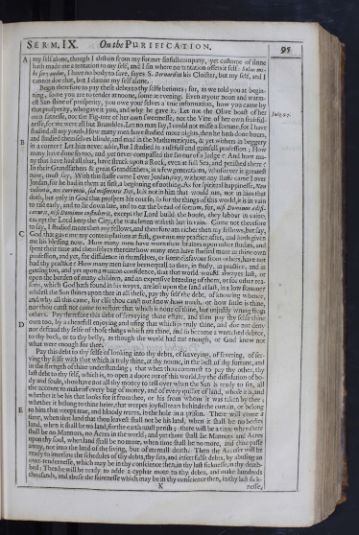 Serm. IX.
On the Purification.
95
my self alone, though I abstain from my former sinfull company, yet custome of sinne
Serm. IX.
On the Purification.
95
my self alone, though I abstain from my former sinfull company, yet custome of sinne
hath made me a tentation to my self, and I sin where no tentation offers it self: Solus mi-
hi servandus, I have no body to save, sayes S. Bernard in his Cloister, but my self, and I
cannot doe that, but I damne my self alone.
Begin therefore to pay these debts to thy selfe betimes; for, as we told you at begin-
ning, some you are to tender at noone, some at evening. Even at your noon and warm-
est Sun-shine of prosperity, you owe your selves a true information, how you came by
that prosperity, who gave it you, and why he gave it.Judg. 9.7. Let not the Olive boast of her
own fatnesse, nor the Fig-tree of her own sweetnesse, nor the Vine of her own fruitful-
nesse, for we were all but Brambles. Let no man say, I could not misse a fortune, for I have
studied all my youth; How many men have studied more nights, then he hath done hours,
and studied themselves blinde, and mad in the Mathematiques, & yet withers in beggery
in a corner? Let him never adde, But I studied in a usefull and gainfull profession; How
many have done so too, and yet never compassed the favour of a Judge? And how ma-
ny that have had all that, have struck upon a Rock, even at full Sea, and perished there?
In their Grandfathers & great Grandfathers, in a few generations, whosoever is greatest
now, must say, With this staffe came I over Jordan; nay, without any staffe came I over
Jordan, for he had in them at first, a beginning of nothing. As for spiritual happinesse, Non
volentis, nec currentis, sed miserentis Dei, It is not in him that would run, nor in him that
doth, but only in God that prospers his course; so for the things of this world, it is in vain
to rise early, and to lie down late, and to eat the bread of sorrow, for, nisi Dominus ædifi-
caverit, nisi Dominus custodierit, except the Lord build the house, they labour in vaine;
except the Lord keep the City, the watchman waketh but in vain. Come not therefore
to say, I studied more then my fellows, and therefore am richer then my fellows, but say,
God that gave me my contemplations at first, gave me my practice after, and hath given
me his blessing now. How many men have worn their braines upon other studies, and
spent their time and themselves therein? how many men have studied more in thine own
profession, and yet, for diffidence in themselves, or some disfavour from others, have not
had thy practice? How many men have been equall to thee, in study, in practice, and in
getting too, and yet upon a wanton confidence, that that world would alwayes last, or
upon the burden of many children, and an expensive breeding of them, or for other rea-
sons, which God hath found in his wayes, are left upon the sand at last, in a low fortune?
whilest the Sun shines upon thee in all these, pay thy self the debt, of knowing whence,
and why all this came, for else thou canst not know how much, or how little is thine,
nor thou canst not come to restore that which is none of thine, but unjustly wrung from
others. Pay therefore this debt of surveying thine estate, and then pay thy selfe thine
own too, by a chearfull enjoying and using that which is truly thine, and doe not deny
nor defraud thy selfe of those things which are thine, and so become a wretched debtor,
to thy back, or to thy belly, as though the world had not enough, or God knew not
what were enough for thee.
Pay this debt to thy selfe of looking into thy debts, of surveying, of severing, of ser-
ving thy selfe with that which is truly thine, at thy noone, in the best of thy fortune, and
in the strength of thine understanding; that when thou commest to pay thy other, thy
last debt to thy self, which is, to open a doore out of this world, by the dissolution of bo-
dy and soule, thou have not all thy money to tell over when the Sun is ready to set, all
the account to make of every bag of money, and of every quillet of land, whose it is, and
whether it be his that looks for it from thee, or his from whom it was taken by thee;
whether it belong to thine heire, that weepes joyfull tears behinde the curtain, or belong
to him that weeps true, and bloody teares, in the hole in a prison. There will come a
time, when that land that thou leavest shall not be his land, when it shall be no bodies
land, when it shall be no land, for the earth must perish; there will be a time when there
shall be no Mannors, no Acres in the world, and yet there shall lie Mannors and Acres
upon thy soul, when land shall be no more, when time shall be no more, and thou passe
away, not into the land of the living, but of eternall death. Then the Accuser will be
ready to interline the schedules of thy debts, thy sins, and insert false debts, by abusing an
over-tendernesse, which may be in thy conscience then, in thy last sicknesse, in thy death-
bed: Then he will be ready to adde a cyphar more to thy debts, and make hundreds
thousands, and abuse the faintnesse which may be in thy conscience then, in thy last sick-
K nesse,
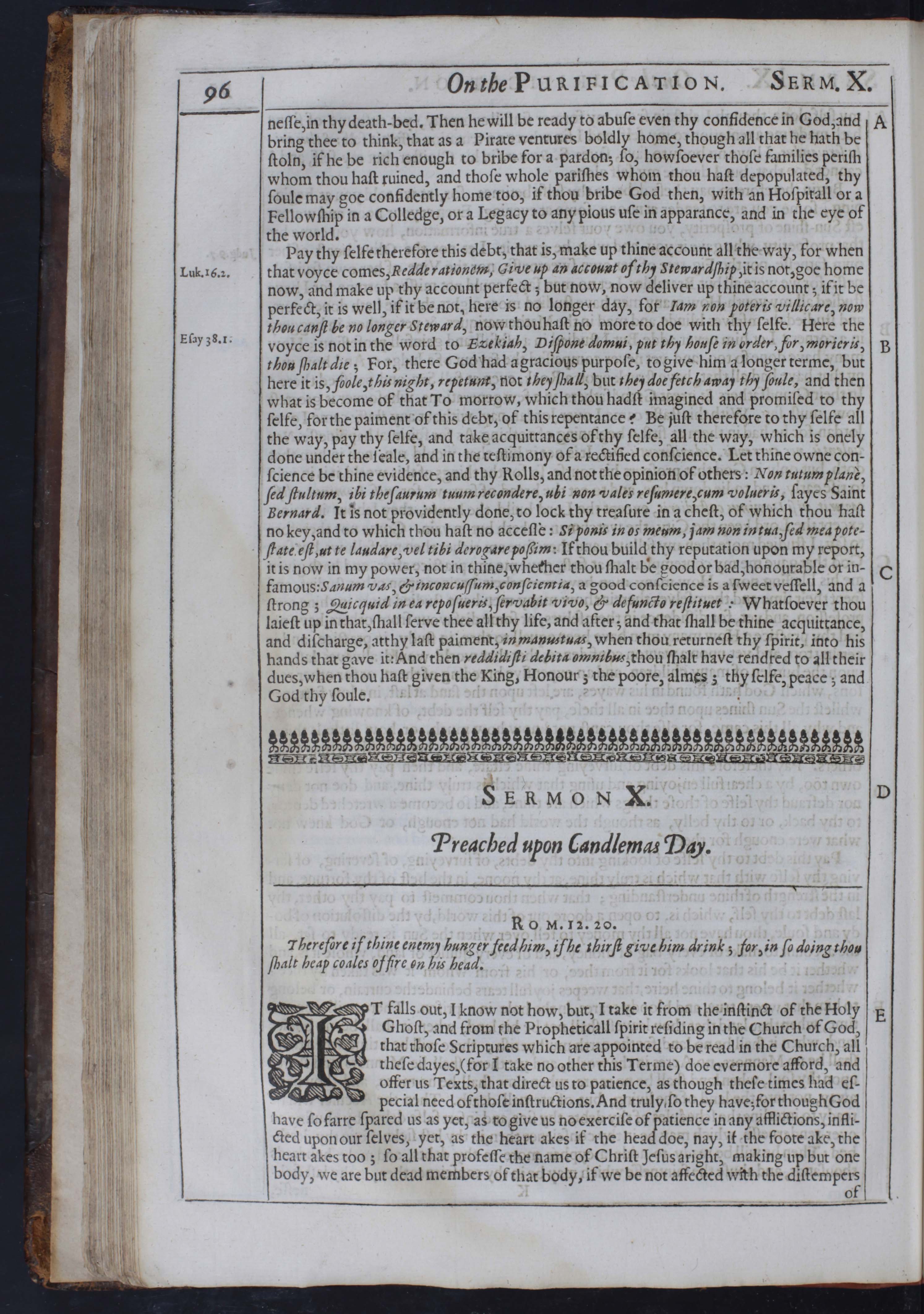 96
On the Purification.
Serm. IX.
nesse, in thy death-bed. Then he will be ready to abuse even thy confidence in God, and
96
On the Purification.
Serm. IX.
nesse, in thy death-bed. Then he will be ready to abuse even thy confidence in God, and
bring thee to think, that as a Pirate ventures boldly home, though all that he hath be
stoln, if he be rich enough to bribe for a pardon; so, howsoever those families perish
whom thou hast ruined, and those whole parishes whom thou hast depopulated, thy
soule may goe confidently home too, if thou bribe God then, with an Hospitall or a
Fellowship in a Colledge, or a Legacy to any pious use in apparance, and in the eye of
the world.
Pay thy selfe therefore this debt, that is, make up thine account all the way, for when
that voyce comes, Luk. 16.2. Redde rationem, Give up an account of thy Stewardship, it is not, goe home
now, and make up thy account perfect; but now, now deliver up thine account; if it be
perfect, it is well, if it be not, here is no longer day, for Iam non poteris villicare, now
thou canst be no longer Steward, Esay 38.1. now thou hast no more to doe with thy selfe. Here the
voyce is not in the word to Ezekiah, Dispone domui, put thy house in order, for, morieris,
thou shalt die; For, there God had a gracious purpose, to give him a longer terme, but
here it is, foole, this night, repetunt, not they shall, but they doe fetch away thy soule, and then
what is become of that To morrow, which thou hadst imagined and promised to thy
selfe, for the paiment of this debt, of this repentance? Be just therefore to thy selfe all
the way, pay thy selfe, and take acquittances of thy selfe, all the way, which is onely
done under the seale, and in the testimony of a rectified conscience. Let thine owne con-
science be thine evidence, and thy Rolls, and not the opinion of others: Non tutum planè,
sed stultum, ibi thesaurum tuum recondere, ubi non vales resumere, cum volueris, sayes Saint
Bernard. It is not providently done, to lock thy treasure in a chest, of which thou hast
no key, and to which thou hast no accesse: Si ponis in os meum jam non in tua, sed mea pote-
state est, ut te laudare, vel tibi derogare possim: If thou build thy reputation upon my report,
it is now in my power, not in thine, whether thou shalt be good or bad, honourable or in-
famous: Sanum vas, & inconcussum, conscientia, a good conscience is a sweet vessell, and a
strong; Quicquid in ea reposueris, servabit vivo, & defuncto restituet: Whatsoever thou
laiest up in that, shall serve thee all thy life, and after; and that shall be thine acquittance,
and discharge, atthy last paiment, in manustuas, when thou returnest thy spirit, into his
hands that gave it: And then reddidisti debita omnibus, thou shalt have rendred to all their
dues, when thou hast given the King, Honour; the poore, almes; thy selfe, peace; and
God thy soule.
SERMON X.
Preached upon Candlemas Day.
Rom. 12.20.
Therefore if thine enemy hunger feed him, if he thirst give him drink; for, in so doing thou
shalt heap coales of fire on his head.
ITIt falls out, I know not how, but, I take it from the instinct of the Holy
Ghost, and from the Propheticall spirit residing in the Church of God,
that those Scriptures which are appointed to be read in the Church, all
these dayes, (for I take no other this Terme) doe evermore afford, and
offer us Texts, that direct us to patience, as though these times had es-
pecial need of those instructions. And truly so they have; for though God
have so farre spared us as yet, as to give us no exercise of patience in any afflictions, infli-
cted upon our selves, yet, as the heart akes if the head doe, nay, if the foote ake, the
heart akes too; so all that professe the name of Christ Jesus aright, making up but one
body, we are but dead members of that body, if we be not affected with the distempers of
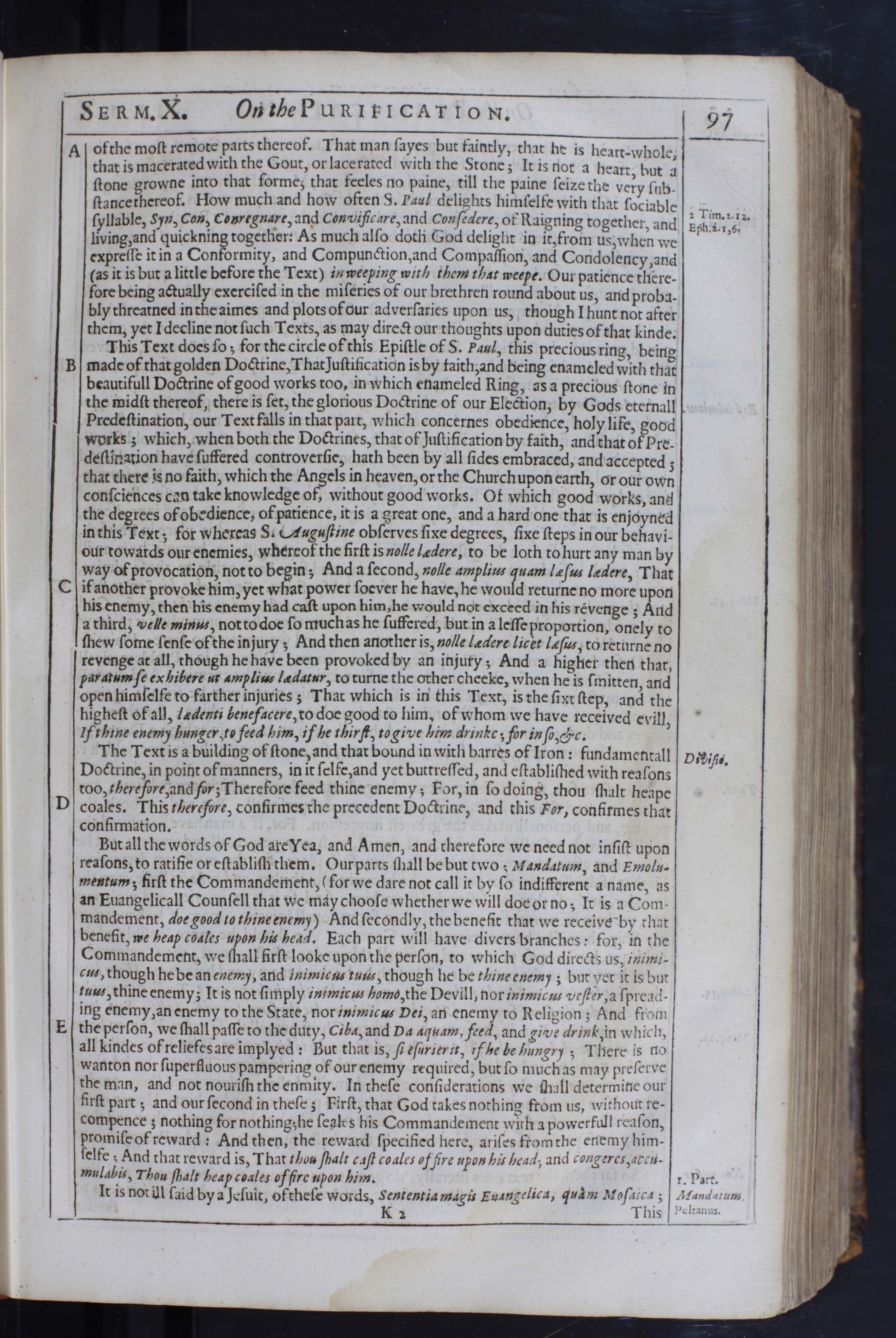 Serm. X.
On the Purification.
97
of the most remote parts thereof. That man sayes but faintly, that he is heart-whole,
Serm. X.
On the Purification.
97
of the most remote parts thereof. That man sayes but faintly, that he is heart-whole,
that is macerated with the Gout, or lacerated with the Stone; It is not a heart, but a
stone growne into that forme, that feeles no paine, till the paine seize the very sub-
stance thereof. How much and how often S. Paul delights himselfe with that sociable
syllable, Syn, Con, Conregnare, and Convificare, and Consedere, of Raigning together, 2 Tim. 2.12. and
living, and quickning together: As much also doth God delight in it, from us, when we Eph. 2.1, 6.
expresse it in a Conformity, and Compunction, and Compassion, and Condolency, and
(as it is but a little before the Text) in weeping with them that weepe. Our patience there-
fore being actually exercised in the miseries of our brethren round about us, and proba-
bly threatned in the aimes and plots of our adversaries upon us, though I hunt not after
them, yet I decline not such Texts, as may direct our thoughts upon duties of that kinde.
This Text does so; for the circle of this Epistle of S. Paul, this precious ring, being
made of that golden Doctrine, That Justification is by faith, and being enameled with that
beautifull Doctrine of good works too, in which enameled Ring, as a precious stone in
the midst thereof, there is set, the glorious Doctrine of our Election, by Gods eternall
Predestination, our Text falls in that part, which concernes obedience, holy life, good
works; which, when both the Doctrines, that of Justification by faith, and that of Pre-
destination have suffered controversie, hath been by all sides embraced, and accepted;
that there is no faith, which the Angels in heaven, or the Church upon earth, or our own
consciences can take knowledge of, without good works. Of which good works, and
the degrees of obedience, of patience, it is a great one; and a hard one that is enjoyned
in this Text; for whereas S. Augustine observes sixe degrees, sixe steps in our behavi-
our towards our enemies, whereof the first is nolle lædere, to be loth to hurt any man by
way of provocation, not to begin; And a second, nolle amplius quam læsus lædere, That
if another provoke him, yet what power soever he have, he would returne no more upon
his enemy, then his enemy had cast upon him, he would not exceed in his revenge; And
a third, velle minus, not to doe so much as he suffered, but in a lesse proportion, onely to
shew some sense of the injury; And then another is, nolle lædere licet læsus, to returne no
revenge at all, though he have been provoked by an injury; And a higher then that,
par atum se exhibere ut amplius lædatur, to turne the other cheeke, when he is smitten, and
open himselfe to farther injuries; That which is in this Text, is the sixt step, and the
highest of all, lædenti benefacere, to doe good to him, of whom we have received evill,
If thine enemy hunger, to feed him, if he thirst, to give him drinke; for in so, &c.
The Text is a building of stone, and that bound in with barres of Iron: Divisio. fundamentall
Doctrine, in point of manners, in it selfe, and yet buttressed, and established with reasons
too, therefore, and for; Therefore feed thine enemy; For, in so doing, thou shalt heape
coales. This therefore, confirmes the precedent Doctrine, and this For, confirmes that
confirmation.
But all the words of God are Yea, and Amen, and therefore we need not insist upon
reasons, to ratifie or establish them. Our parts shall be but two; Mandatum, and Emolu-
mentum; first the Commandement, (for we dare not call it by so indifferent a name, as
an Euangelicall Counsell that we may choose whether we will doe or no; It is a Com-
mandement, doe good to thine enemy) And secondly, the benefit that we receive by that
benefit, we heap coales upon his head. Each part will have divers branches: for, in the
Commandement, we shall first looke upon the person, to which God directs us, inimi-
cus, though he be an enemy, and inimicus tuus, though he be thine enemy; but yet it is but
tuus, thine enemy; It is not simply inimicus homo, the Devill, nor inimicus vester, a spread-
ing enemy, an enemy to the State, nor inimicus Dei, an enemy to Religion; And from
the person, we shall passe to the duty, Ciba, and Da aquam, feed, and give drink, in which,
all kindes of reliefes are implyed: But that is, si esurierit, if he be hungry; There is no
wanton nor superfluous pampering of our enemy required, but so much as may preserve
the man, and not nourish the enmity. In these considerations we shall determine our
first part; and our second in these; First, that God takes nothing from us, without re-
compence; nothing for nothing; he seales his Commandement with a powerfull reason,
promise of reward: And then, the reward specified here, arises from the enemy him-
selfe; And that reward is, That thou shalt cast coales of fire upon his head; and congeres, accu-
mulabis, Thou shalt heap coales of fire upon him.
It is not ill said by a Jesuit, of these words, Sententia magis Euangelica, quàm Mosaica;1. Part.
Mandatum.
Peltanus. K2 This
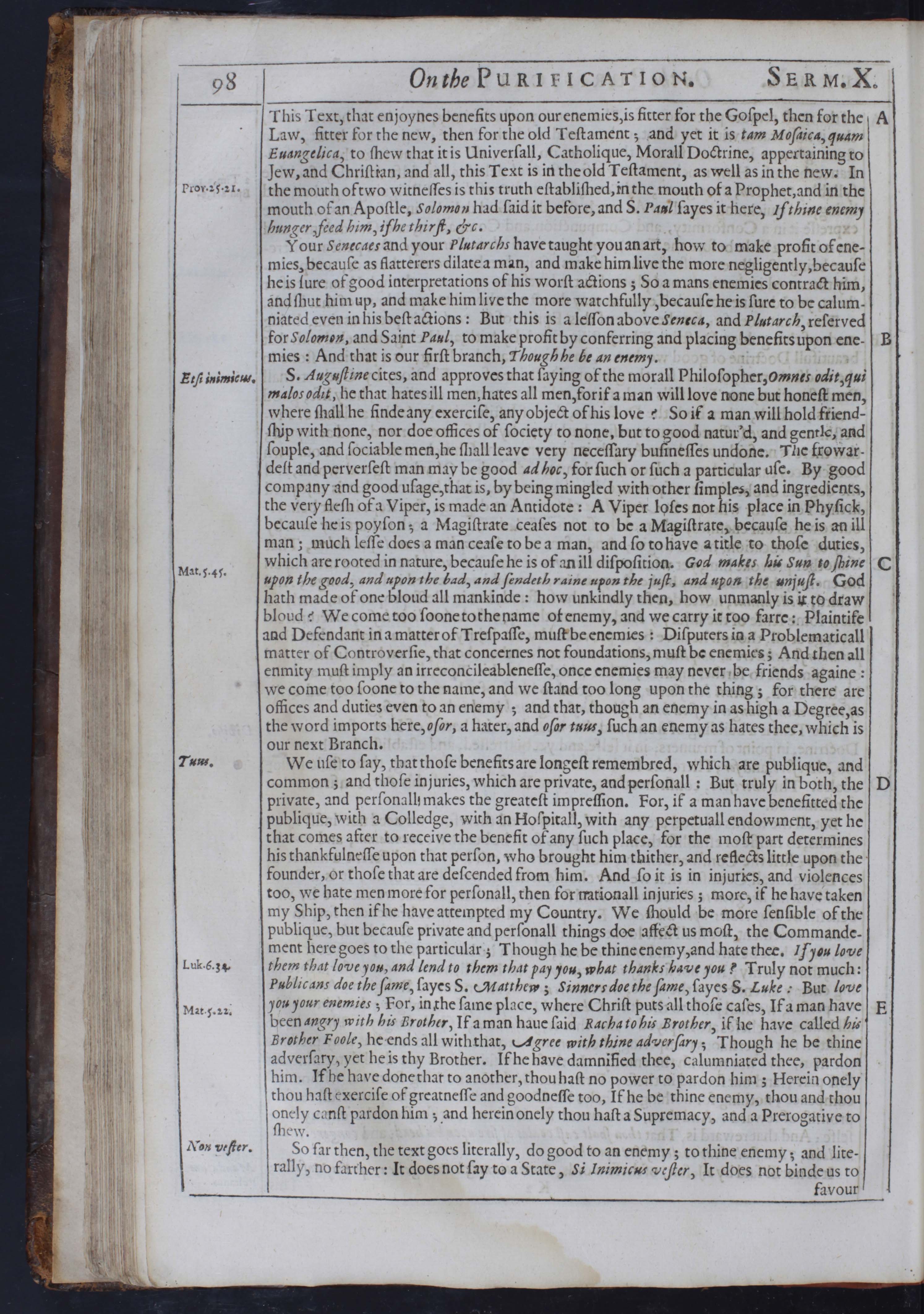 98
On the Purification.
Serm. X.
This Text, that enjoynes benefits upon our enemies, is fitter for the Gospel, then for the
98
On the Purification.
Serm. X.
This Text, that enjoynes benefits upon our enemies, is fitter for the Gospel, then for the
Law, fitter for the new, then for the old Testament; and yet it is tam Mosaica, quam
Euangelica, to shew that it is Universall, Catholique, Morall Doctrine, appertaining to
Jew, Prov. 25.21. and Christian, and all, this Text is in the old Testament, as well as in the new. In
the mouth of two witnesses is this truth established, in the mouth of a Prophet, and in the
mouth of an Apostle, Solomon had said it before, and S. Paul sayes it here, If thine enemy
hunger, feed him, if he thirst, &c.
Your Senecæs and your Plutarchs have taught you an art, how to make profit of ene-
mies, because as flatterers dilate a man, and make him live the more negligently, because
he is sure of good interpretations of his worst actions; So a mans enemies contract him,
and shut him up, and make him live the more watchfully, because he is sure to be calum-
niated even in his best actions: But this is a lesson above Seneca, and Plutarch, reserved
for Solomon, and Saint Paul, to make profit by conferring and placing benefits upon ene-
mies: And that is our first branch, Though he be an enemy.
S. Augustine cites, Et si inimieus. and approves that saying of the morall Philosopher, Omnes odit, qui
malos odit, he that hates ill men, hates all men, for if a man will love none but honest men,
where shall he finde any exercise, any object of his love? So if a man will hold friend-
ship with none, nor doe offices of society to none, but to good natur'd, and gentle, and
souple, and sociable men, he shall leave very necessary businesses undone. The frowar-
dest and perversest man may be good ad hoc, for such or such a particular use. By good
company and good usage, that is, by being mingled with other simples, and ingredients,
the very flesh of a Viper, is made an Antidote: A Viper loses not his place in Physick,
because he is poyson; a Magistrate ceases not to be a Magistrate, because he is an ill
man; much lesse does a man cease to be a man, and so to have a title to those duties,
which are rooted in nature, because he is of an ill disposition. God makes his Sun to shine
upon the good,Mat. 5.45. and upon the bad, and sendeth raine upon the just, and upon the unjust. God
hath made of one bloud all mankinde: how unkindly then, how unmanly is it to draw
bloud? We come too soone to the name of enemy, and we carry it too farre: Plaintife
and Defendant in a matter of Trespasse, must be enemies: Disputers in a Problematicall
matter of Controversie, that concernes not foundations, must be enemies; And then all
enmity must imply an irreconcileablenesse, once enemies may never be friends againe:
we come too soone to the name, and we stand too long upon the thing; for there are
offices and duties even to an enemy; and that, though an enemy in as high a Degree, as
the word imports here, osor, a hater, and osor tuus, such an enemy as hates thee, which is
our next Branch.
We use to say, Tuus. that those benefits are longest remembred, which are publique, and
common; and those injuries, which are private, and personall: But truly in both, the
private, and personall makes the greatest impression. For, if a man have benefitted the
publique, with a Colledge, with an Hospitall, with any perpetuall endowment, yet he
that comes after to receive the benefit of any such place, for the most part determines
his thankfulnesse upon that person, who brought him thither, and reflects little upon the
founder, or those that are descended from him. And so it is in injuries, and violences
too, we hate men more for personall, then for nationall injuries; more, if he have taken
my Ship, then if he have attempted my Country. We should be more sensible of the
publique, but because private and personall things doe affect us most, the Commande-
ment here goes to the particular.; Though he be thine enemy, and hate thee. If you love
them that love you,Luk. 6.34. and lend to them that pay you, what thanks have you? Truly not much:
Publicans doe the same, sayes S. Matthew; Sinners doe the same, sayes S. Luke: But love
you your enemies;Mat. 5.22. For, in the same place, where Christ puts all those cases, If a man have
been angry with his Brother, If a man haue said Racha to his Brother, if he have called his
Brother Foole, he ends all with that, Agree with thine adversary; Though he be thine
adversary, yet he is thy Brother. If he have damnified thee, calumniated thee, pardon
him. If he have done that to another, thou hast no power to pardon him; Herein onely
thou hast exercise of greatnesse and goodnesse too, If he be thine enemy, thou and thou
onely canst pardon him; and herein onely thou hast a Supremacy, and a Prerogative to
shew.
So far then, Non vester. the text goes literally, do good to an enemy; to thine enemy; and lite-
rally, no farther: It does not say to a State, Si Inimicus vester, It does not binde us to favour
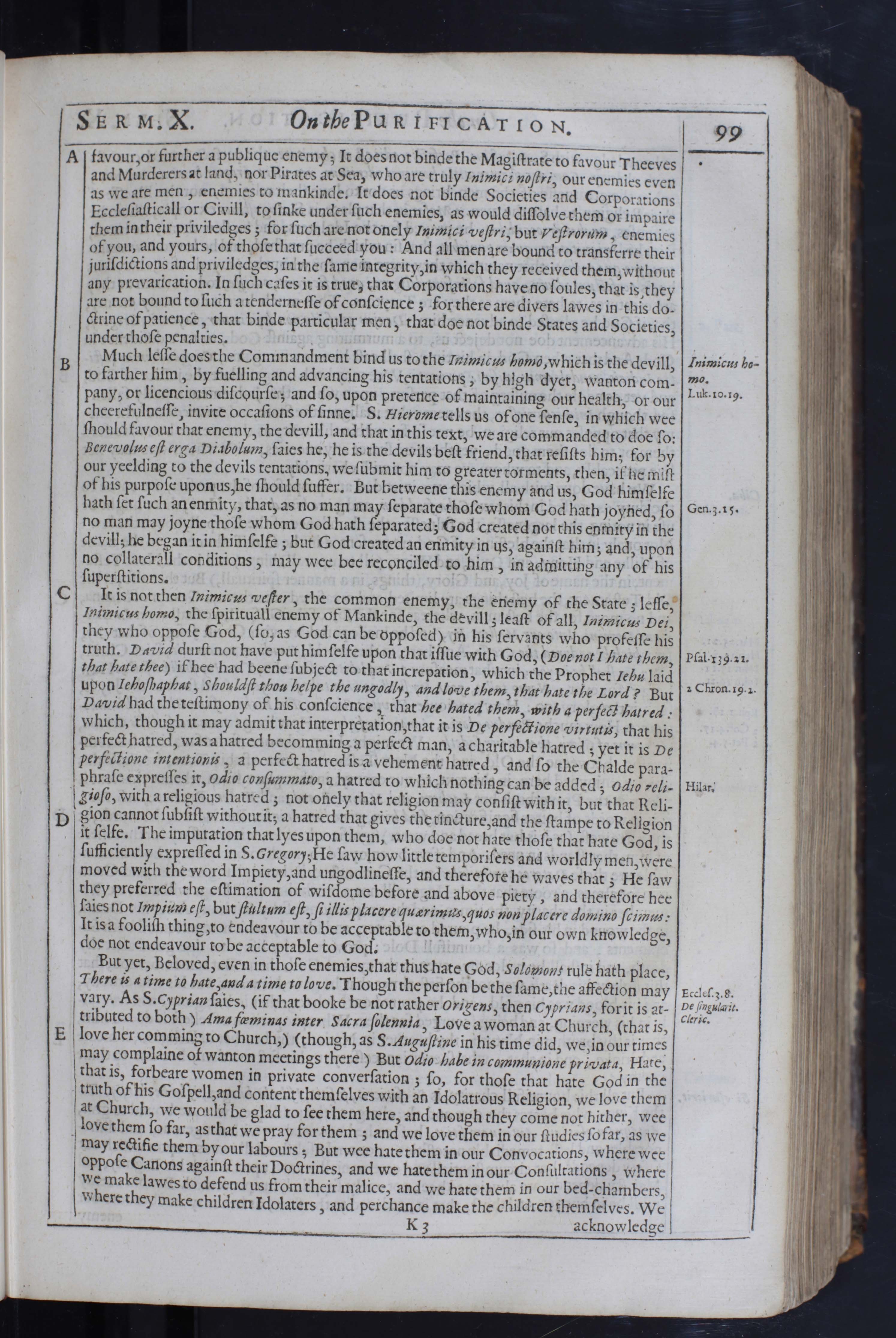 Serm. X.
On the Purification.
99
favour, or further a publique enemy; It does not binde the Magistrate to favour Theeves
Serm. X.
On the Purification.
99
favour, or further a publique enemy; It does not binde the Magistrate to favour Theeves
and Murderers at land, nor Pirates at Sea, who are truly Inimici nostri, our enemies even
as we are men, enemies to mankinde. It does not binde Societies and Corporations
Ecclesiasticall or Civill, to sinke under such enemies, as would dissolve them or impaire
them in their priviledges; for such are not onely Inimici vestri, but Vestrorum, enemies
of you, and yours, of those that succeed you: And all men are bound to transferre their
jurisdictions and priviledges, in the same integrity, in which they received them, without
any prevarication. In such cases it is true, that Corporations have no soules, that is, they
are not bound to such a tendernesse of conscience; for there are divers lawes in this do-
ctrine of patience, that binde particular men, that doe not binde States and Societies,
under those penalties.
Much lesse does the Commandment bind us to the Inimicus homo, which is the devill, Inimicus ho-
mo.
to farther him, by fuelling and advancing his tentations, by high dyet, wanton com-
pany, or licencious discourse; and so, upon pretence of maintaining our health, Luk. 10.19. or our
cheerefulnesse, invite occasions of sinne. S. Hierome tells us of one sense, in which wee
should favour that enemy, the devill, and that in this text, we are commanded to doe so:
Benevolus est erga Diabolum, saies he, he is the devils best friend, that resists him; for by
our yeelding to the devils tentations, we submit him to greater torments, then, if he mist
of his purpose upon us, he should suffer. But betweene this enemy and us, God himselfe
hath set such an enmity, that, as no man may separate those whom God hath joyned, Gen. 3.15. so
no man may joyne those whom God hath separated; God created not this enmity in the
devill; he began it in himselfe; but God created an enmity in us, against him; and, upon
no collaterall conditions, may wee bee reconciled to him, in admitting any of his
superstitions.
It is not then Inimicus vester, the common enemy, the enemy of the State; lesse,
Inimicus homo, the spirituall enemy of Mankinde, the devill; least of all, Inimicus Dei,
they who oppose God, (so, as God can be opposed) in his servants who professe his
truth. David durst not have put himselfe upon that issue with God, (Doe not I hate them,
Psal. 139.21. that hate thee) if hee had beene subject to that increpation, which the Prophet Iehu laid
upon Iehoshaphat, Shouldst thou helpe the ungodly, and love them, that hate the Lord?2 Chron. 19.2. But
David had the testimony of his conscience, that hee hated them, with a perfect hatred:
which, though it may admit that interpretation, that it is De perfectione virtutis, that his
perfect hatred, was a hatred becomming a perfect man, a charitable hatred; yet it is De
perfectione intentionis, a perfect hatred is a vehement hatred, and so the Chalde para-
phrase expresses it, Odio consummato, a hatred to which nothing can be added; Hilar. Odio reli-
gioso, with a religious hatred; not onely that religion may consist with it, but that Reli-
gion cannot subsist without it; a hatred that gives the tincture, and the stampe to Religion
it selfe. The imputation that lyes upon them, who doe not hate those that hate God, is
sufficiently expressed in S. Gregory; He saw how little temporisers and worldly men, were
moved with the word Impiety, and ungodlinesse, and therefore he waves that; He saw
they preferred the estimation of wisdome before and above piety, and therefore hee
saies not Impium est, but stultum est, si illis placere quærimus, quos non placere domino scimus:
It is a foolish thing, to endeavour to be acceptable to them, who, in our own knowledge,
doe not endeavour to be acceptable to God.
But yet, Beloved, even in those enemies, that thus hate God, Solomons rule hath place,
There is a time to hate, and a time to love. Though the person be the same, Eccles. 3.8. the affection may
vary. As S. Cyprian saies, (if that booke be not rather Origens, then Cyprians, for it is De singularit.
Cleric. at-
tributed to both) Ama fœminas inter Sacra solennia, Love a woman at Church, (that is,
love her comming to Church,) (though, as S. Augustine in his time did, we, in our times
may complaine of wanton meetings there) But Odio habe in communione privata, Hate,
that is, forbeare women in private conversation; so, for those that hate God in the
truth of his Gospell, and content themselves with an Idolatrous Religion, we love them
at Church, we would be glad to see them here, and though they come not hither, wee
love them so far, as that we pray for them; and we love them in our studies so far, as we
may rectifie them by our labours; But wee hate them in our Convocations, where wee
oppose Canons against their Doctrines, and we hate them in our Consultations, where
we make lawes to defend us from their malice, and we hate them in our bed-chambers,
where they make children Idolaters, and perchance make the children themselves. We K3 acknowledge
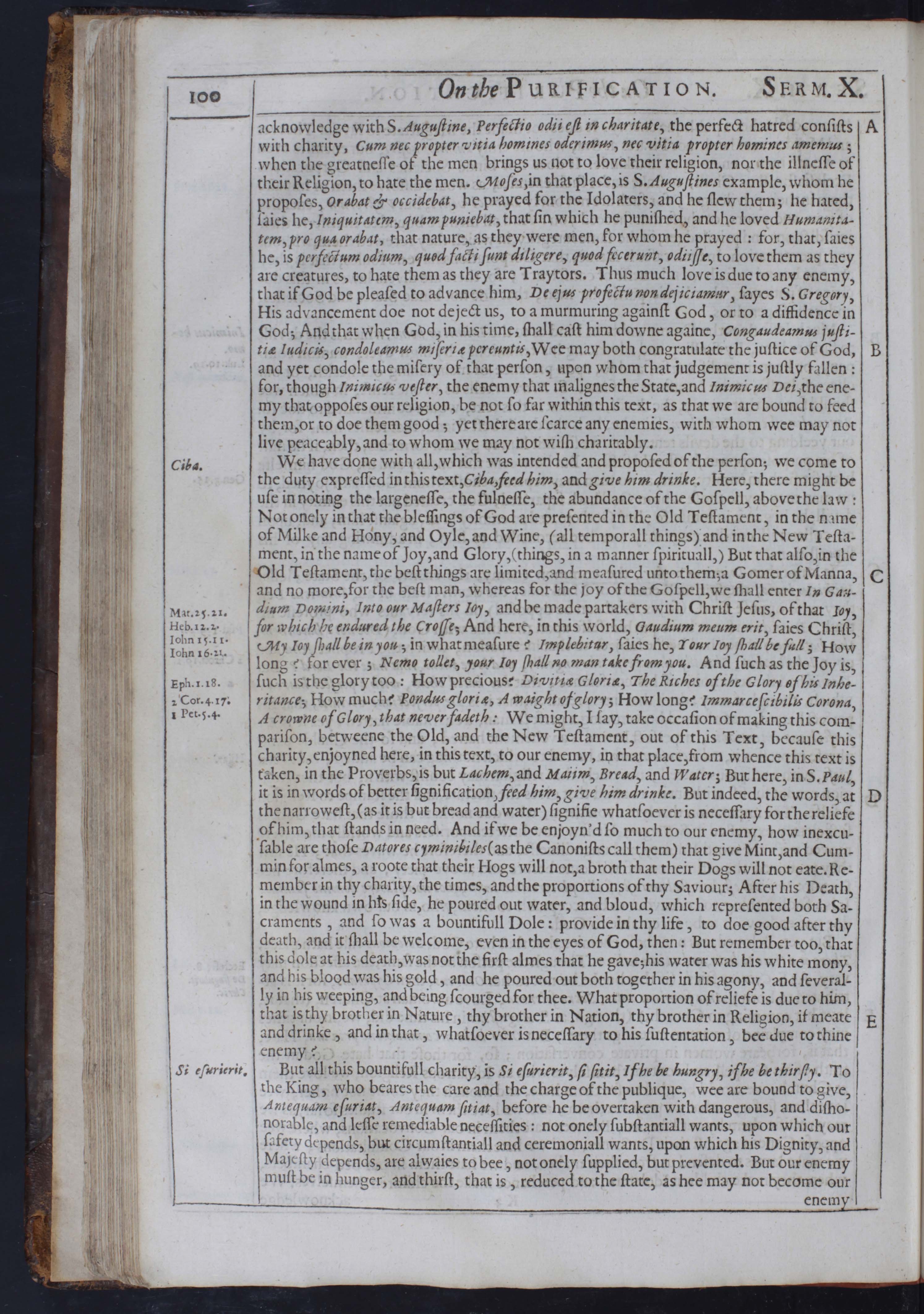 100
On the Purification.
Serm. X.
acknowledge with S. Augustine, Perfectio odii est in charitate, the perfect hatred consists
100
On the Purification.
Serm. X.
acknowledge with S. Augustine, Perfectio odii est in charitate, the perfect hatred consists
with charity, Cum nec propter vitia homines oderimus, nec vitia propter homines amemut;
when the greatnesse of the men brings us not to love their religion, nor the illnesse of
their Religion, to hate the men. Moses, in that place, is S. Augustines example, whom he
proposes, Orabat & occidebat, he prayed for the Idolaters, and he slew them; he hated,
saies he, Iniquitatem, quam puniebat, that sin which he punished, and he loved Humanita-
tem, pro qua or abat, that nature, as they were men, for whom he prayed: for, that, saies
he, is perfectum odium, quod facti sunt diligere, quod fecerunt, odiisse, to love them as they
are creatures, to hate them as they are Traytors. Thus much love is due to any enemy,
that if God be pleased to advance him, De ejus profectu non dejiciamur, sayes S. Gregory,
His advancement doe not deject us, to a murmuring against God, or to a diffidence in
God; And that when God, in his time, shall cast him downe againe, Congaudeamus justi-
tiæ Iudicis, condoleamus miseriæ pereuntis, Wee may both congratulate the justice of God,
and yet condole the misery of that person, upon whom that judgement is justly fallen:
for, though Inimicus vester, the enemy that malignes the State, and Inimicus Dei, the ene-
my that opposes our religion, be not so far within this text, as that we are bound to feed
them, or to doe them good; yet there are scarce any enemies, with whom wee may not
live peaceably, and to whom we may not wish charitably.
We have done with all, which was intended and proposed of the person; we come to Ciba.
the duty expressed in this text, Ciba, feed him, and give him drinke. Here, there might be
use in noting the largenesse, the fulnesse, the abundance of the Gospell, above the law:
Not onely in that the blessings of God are presented in the Old Testament, in the name
of Milke and Hony, and Oyle, and Wine, (all temporall things) and in the New Testa-
ment, in the name of Joy, and Glory, (things, in a manner spirituall,) But that also, in the
Old Testament, the best things are limited, and measured unto them; a Gomer of Manna,
and no more, Mat. 25.21. for the best man, whereas for the joy of the Gospell, we shall enter In Gan-
dium Domini, Into our Masters Ioy, Heb. 12.2. and be made partakers with Christ Jesus, of that Ioy,
for which he endured the Crosse; And here, in this world, Gaudium meum erit, saies Christ, Iohn 15.11.
My Ioy shall be in you; in what measure? Implebitar, saies he, Your Ioy shall be full; How Iohn 16.21.
long? for ever; Nemo tollet, your Ioy shall no man take from you. And such as the Joy is,
such is the glory too:Eph. 1.18. How precious? Divitiæ Gloria, The Riches of the Glory of his Inhe-
ritance; How much? Pondus gloriæ, A waight of glory; How long? 2 Cor. 4.17. Immarcescibilis Corona,
A crowne of Glory, that never fadeth: We might, I say, take occasion of making this 1 Pet. 5.4. com-
parison, betweene the Old, and the New Testament, out of this Text, because this
charity, enjoyned here, in this text, to our enemy, in that place, from whence this text is
taken, in the Proverbs, is but Lachem, and Maiim, Bread, and Water; But here, in S. Paul,
it is in words of better signification, feed him, give him drinke. But indeed, the words, at
the narrowest, (as it is but bread and water) signifie whatsoever is necessary for the reliefe
of him, that stands in need. And if we be enjoyn'd so much to our enemy, how inexcu-
sable are those Datores cyminibiles (as the Canonists call them) that give Mint, and Cum-
min for almes, a roote that their Hogs will not, a broth that their Dogs will not eate. Re-
member in thy charity, the times, and the proportions of thy Saviour; After his Death,
in the wound in his side, he poured out water, and bloud, which represented both Sa-
craments, and so was a bountifull Dole: provide in thy life, to doe good after thy
death, and it shall be welcome, even in the eyes of God, then: But remember too, that
this dole at his death, was not the first almes that he gave; his water was his white mony,
and his blood was his gold, and he poured out both together in his agony, and several-
ly in his weeping, and being scourged for thee. What proportion of reliefe is due to him,
that is thy brother in Nature, thy brother in Nation, thy brother in Religion, if meate
and drinke, and in that, whatsoever is necessary to his sustentation, bee due to thine
enemy?
But all this bountifull charity, Si esurierit. is Si esurierit, si sitit, If he be hungry, if he be thirsty. To
the King, who beares the care and the charge of the publique, wee are bound to give,
Antequam esuriat, Antequam sitias, before he be overtaken with dangerous, and disho-
norable, and lesse remediable necessities: not onely substantiall wants, upon which our
safety depends, but circumstantiall and ceremoniall wants, upon which his Dignity, and
Majesty depends, are alwaies to bee, not onely supplied, but prevented. But our enemy
must be in hunger, and thirst, that is, reduced to the state, as hee may not become our enemy
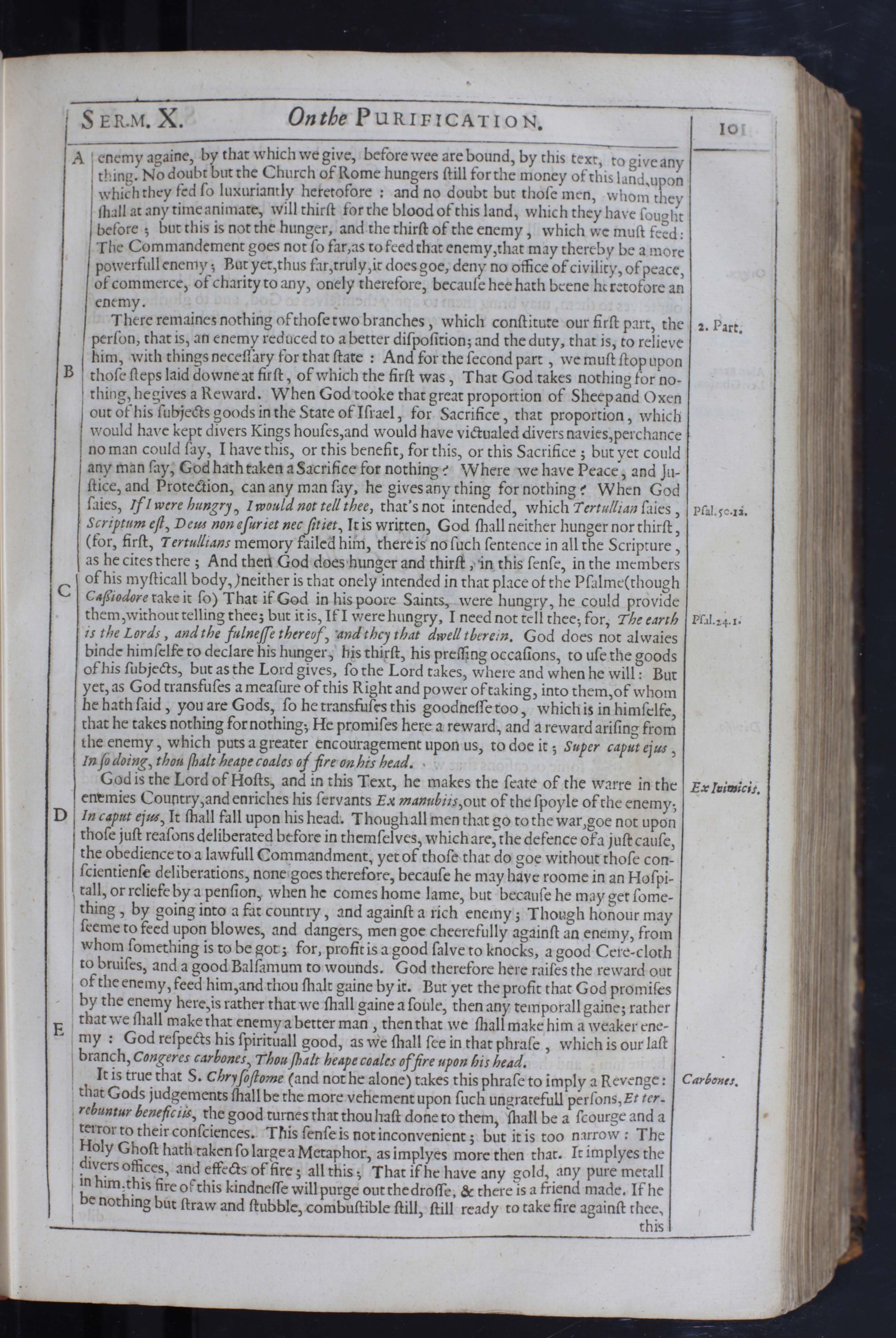 Serm. X.
On the Purification.
101
Serm. X.
On the Purification.
101
enemy againe, by that which we give, before wee are bound, by this text, to give any
thing. No doubt but the Church of Rome hungers still for the money of this land, upon
which they fed so luxuriantly heretofore: and no doubt but those men, whom they
shall at any time animate, will thirst for the blood of this land, which they have sought
before; but this is not the hunger, and the thirst of the enemy, which we must feed:
The Commandement goes not so far, as to feed that enemy, that may thereby be a more
powerfull enemy; But yet, thus far, truly, it does goe, deny no office of civility, of peace,
of commerce, of charity to any, onely therefore, because hee hath beene heretofore an
enemy.
There remaines nothing of those two branches, which constitute our first part, 2. Part. the
person, that is, an enemy reduced to a better disposition; and the duty, that is, to relieve
him, with things necessary for that state: And for the second part, we must stop upon
those steps laid downe at first, of which the first was, That God takes nothing for no-
thing, he gives a Reward. When God tooke that great proportion of Sheep and Oxen
out of his subjects goods in the State of Israel, for Sacrifice, that proportion, which
would have kept divers Kings houses, and would have victualed divers navies, perchance
no man could say, I have this, or this benefit, for this, or this Sacrifice; but yet could
any man say, God hath taken a Sacrifice for nothing? Where we have Peace, and Ju-
stice, and Protection, can any man say, he gives any thing for nothing? When God
saies, If I were hungry, I would not tell thee, that's not intended, which Tertullian saies,
Psal. 50.12. Scriptum est, Deus non esuriet nec sitiet, It is written, God shall neither hunger nor thirst,
(for, first, Tertullians memory failed him, there is no such sentence in all the Scripture,
as he cites there; And then God does hunger and thirst, in this sense, in the members
of his mysticall body,) neither is that onely intended in that place of the Psalme (though
Cassiodore take it so) That if God in his poore Saints, were hungry, he could provide
them, without telling thee; but it is, If I were hungry, I need not tell thee; for, Psal. 24.1. The earth
is the Lords, and the fulnesse thereof, and they that dwell therein. God does not alwaies
binde himselfe to declare his hunger, his thirst, his pressing occasions, to use the goods
of his subjects, but as the Lord gives, so the Lord takes, where and when he will: But
yet, as God transfuses a measure of this Right and power of taking, into them, of whom
he hath said, you are Gods, so he transfuses this goodnesse too, which is in himselfe,
that he takes nothing for nothing; He promises here a reward, and a reward arising from
the enemy, which puts a greater encouragement upon us, to doe it; Super caput ejus,
In so doing, thou shalt heape coales of fire on his head.
God is the Lord of Hosts, and in this Text, Ex Inimicis. he makes the seate of the warre in the
enemies Country, and enriches his servants Ex manubiis, out of the spoyle of the enemy;
In caput ejus, It shall fall upon his head. Though all men that go to the war, goe not upon
those just reasons deliberated before in themselves, which are, the defence of a just cause,
the obedience to a lawfull Commandment, yet of those that do goe without those con-
scientiense deliberations, none goes therefore, because he may have roome in an Hospi-
tall, or reliefe by a pension, when he comes home lame, but because he may get some-
thing, by going into a fat country, and against a rich enemy; Though honour may
seeme to feed upon blowes, and dangers, men goe cheerefully against an enemy, from
whom something is to be got; for, profit is a good salve to knocks, a good Cere-cloth
to bruises, and a good Balsamum to wounds. God therefore here raises the reward out
of the enemy, feed him, and thou shalt gaine by it. But yet the profit that God promises
by the enemy here, is rather that we shall gaine a soule, then any temporall gaine; rather
that we shall make that enemy a better man, then that we shall make him a weaker ene-
my: God respects his spirituall good, as we shall see in that phrase, which is our last
branch, Congeres carbones, Thou shalt heape coales of fire upon his head.
It is true that S. Chrysostome (and not he alone) takes this phrase to imply a Revenge:
Carbones. that Gods judgements shall be the more vehement upon such ungratefull persons, Et ter-
rebuntur beneficiis, the good turnes that thou hast done to them, shall be a scourge and a
terror to their consciences. This sense is not inconvenient; but it is too narrow: The
Holy Ghost hath taken so large a Metaphor, as implyes more then that. It implyes the
divers offices, and effects of fire; all this; That if he have any gold, any pure metall
in him, this fire of this kindnesse will purge out the drosse, & there is a friend made. If he
be nothing but straw and stubble, combustible still, still ready to take fire against thee, It is true that S. this
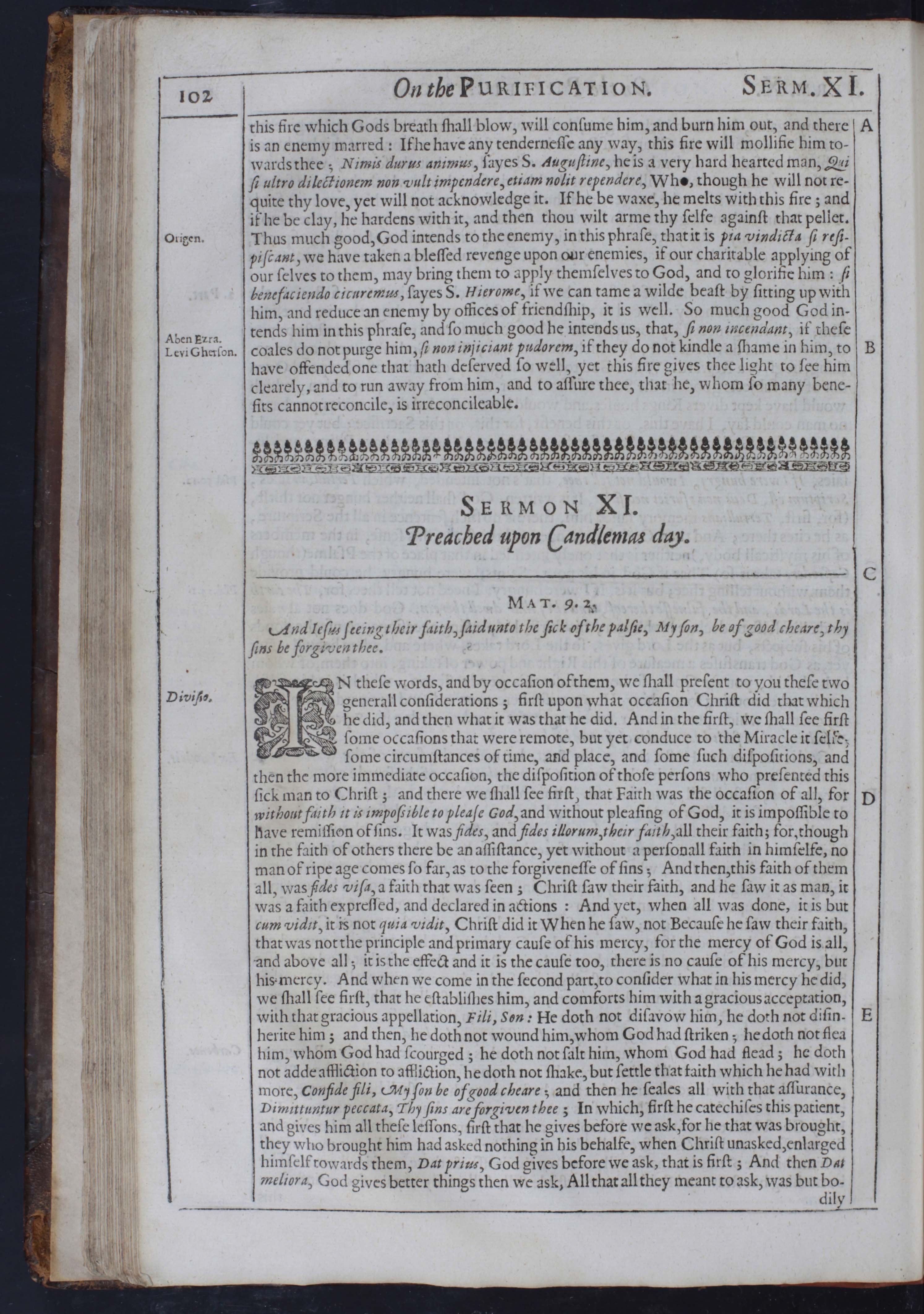 102
On the Purification.
Serm. XI.
this fire which Gods breath shall blow, will consume him, and burn him out, and there
102
On the Purification.
Serm. XI.
this fire which Gods breath shall blow, will consume him, and burn him out, and there
is an enemy marred: If he have any tendernesse any way, this fire will mollifie him to-
wards thee; Nimis durus animus, sayes S. Augustine, he is a very hard hearted man, Qui
si ultro dilectionem non vult impendere, etiam nolit rependere, Who, though he will not re-
quite thy love, yet will not acknowledge it. If he be waxe, he melts with this fire; and
if he be clay, he hardens with it, and then thou wilt arme thy selfe against that pellet.
Thus much good, Origen. God intends to the enemy, in this phrase, that it is pia vindicta si resi-
piscant, we have taken a blessed revenge upon our enemies, if our charitable applying of
our selves to them, may bring them to apply themselves to God, and to glorifie him: si
benefaciendo cicuremus, sayes S. Hierome, if we can tame a wilde beast by sitting up with
him, and reduce an enemy by offices of friendship, it is well. So much good God in-
tends him in this phrase, and so much good he intends us, that, si non incendant, if these
coales do not purge him, Aben Ezra.
Levi Gherson. si non injiciant pudorem, if they do not kindle a shame in him, to
have offended one that hath deserved so well, yet this fire gives thee light to see him
clearely, and to run away from him, and to assure thee, that he, whom so many bene-
fits cannot reconcile, is irreconcileable.
SERMON XI.
Preached upon Candlemas day.
Mat. 9.2.
And Iesus seeing their faith, said unto the sick of the palsie, My son, be of good cheare, thy
sins be forgiven thee.
IN these words, Divisio. and by occasion of them, we shall present to you these two
generall considerations; first upon what occasion Christ did that which
he did, and then what it was that he did. And in the first, we shall see first
some occasions that were remote, but yet conduce to the Miracle it selfe;
some circumstances of time, and place, and some such dispositions, and
then the more immediate occasion, the disposition of those persons who presented this
sick man to Christ; and there we shall see first, that Faith was the occasion of all, for
without faith it is impossible to please God, and without pleasing of God, it is impossible to
have remission of sins. It was fides, and fides illorum, their faith, all their faith; for, though
in the faith of others there be an assistance, yet without a personall faith in himselfe, no
man of ripe age comes so far, as to the forgivenesse of sins; And then, this faith of them
all, was fides visa, a faith that was seen; Christ saw their faith, and he saw it as man, it
was a faith expressed, and declared in actions: And yet, when all was done, it is but
cum vidit, it is not quia vidit, Christ did it When he saw, not Because he saw their faith,
that was not the principle and primary cause of his mercy, for the mercy of God is all,
and above all; it is the effect and it is the cause too, there is no cause of his mercy, but
his mercy. And when we come in the second part, to consider what in his mercy he did,
we shall see first, that he establishes him, and comforts him with a gracious acceptation,
with that gracious appellation, Fili, Son: He doth not disavow him, he doth not disin-
herite him; and then, he doth not wound him, whom God had striken; he doth not flea
him, whom God had scourged; he doth not salt him, whom God had flead; he doth
not adde affliction to affliction, he doth not shake, but settle that faith which he had with
more, Confide fili, My son be of good cheare; and then he seales all with that assurance,
Dimittuntur peccata, Thy sins are forgiven thee; In which, first he catechises this patient,
and gives him all these lessons, first that he gives before we ask, for he that was brought,
they who brought him had asked nothing in his behalfe, when Christ unasked, enlarged
himself towards them, Dat prius, God gives before we ask, that is first; And then Dat
meliora, God gives better things then we ask, All that all they meant to ask, was but bo dily
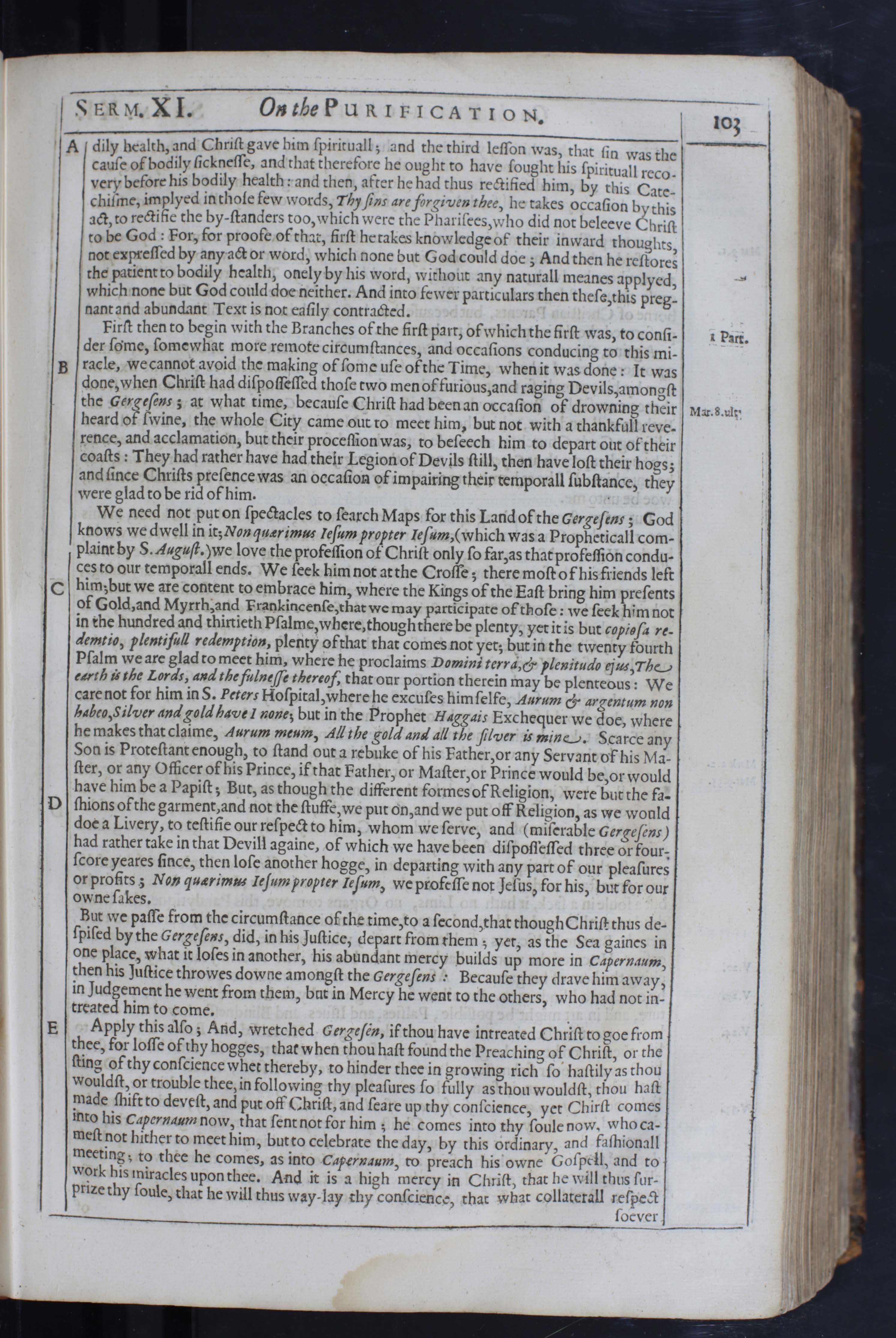 Serm. XI.
On the Purification.
103
dily health, and Christ gave him spirituall; and the third lesson was, that sin was the
Serm. XI.
On the Purification.
103
dily health, and Christ gave him spirituall; and the third lesson was, that sin was the
cause of bodily sicknesse, and that therefore he ought to have sought his spirituall reco-
very before his bodily health: and then, after he had thus rectified him, by this Cate-
chisme, implyed in those few words, Thy sins are forgiven thee, he takes occasion by this
act, to rectifie the by-standers too, which were the Pharisees, who did not beleeve Christ
to be God: For, for proofe of that, first he takes knowledge of their inward thoughts,
not expressed by any act or word, which none but God could doe; And then he restores
the patient to bodily health, onely by his word, without any naturall meanes applyed,
which none but God could doe neither. And into fewer particulars then these, this preg-
nant and abundant Text is not easily contracted.
First then to begin with the Branches of the first part, of which the first was, 1 Part. to consi-
der some, somewhat more remote circumstances, and occasions conducing to this mi-
racle, we cannot avoid the making of some use of the Time, when it was done: It was
done, when Christ had dispossessed those two men of furious, and raging Devils, amongst
the Gergesens; at what time, Mar. 8. ult. because Christ had been an occasion of drowning their
heard of swine, the whole City came out to meet him, but not with a thankfull reve-
rence, and acclamation, but their procession was, to beseech him to depart out of their
coasts: They had rather have had their Legion of Devils still, then have lost their hogs;
and since Christs presence was an occasion of impairing their temporall substance, they
were glad to be rid of him.
We need not put on spectacles to search Maps for this Land of the Gergesens; God
knows we dwell in it; Non quærimus Iesum propter Iesum, (which was a Propheticall com-
plaint by S. August.) we love the profession of Christ only so far, as that profession condu-
ces to our temporall ends. We seek him not at the Crosse; there most of his friends left
him; but we are content to embrace him, where the Kings of the East bring him presents
of Gold, and Myrrh, and Frankincense, that we may participate of those: we seek him not
in the hundred and thirtieth Psalme, where, though there be plenty, yet it is but copiosa re-
demtio, plentifull redemption, plenty of that that comes not yet; but in the twenty fourth
Psalm we are glad to meet him, where he proclaims Domini terra, & plenitudo ejus, The
earth is the Lords, and the fulnesse thereof, that our portion therein may be plenteous: We
care not for him in S. Peters Hospital, where he excuses himselfe, Aurum & argentum non
habeo, Silver and gold have I none; but in the Prophet Haggais Exchequer we doe, where
he makes that claime, Aurum meum, All the gold and all the silver is mine. Scarce any
Son is Protestant enough, to stand out a rebuke of his Father, or any Servant of his Ma-
ster, or any Officer of his Prince, if that Father, or Master, or Prince would be, or would
have him be a Papist; But, as though the different formes of Religion, were but the fa-
shions of the garment, and not the stuffe, we put on, and we put off Religion, as we would
doe a Livery, to testifie our respect to him, whom we serve, and (miserable Gergesens)
had rather take in that Devill againe, of which we have been dispossessed three or four-
score yeares since, then lose another hogge, in departing with any part of our pleasures
or profits; Non quærimus Iesum propter Iesum, we professe not Jesus, for his, but for our
owne sakes.
But we passe from the circumstance of the time, to a second, that though Christ thus de-
spised by the Gergesens, did, in his Justice, depart from them; yet, as the Sea gaines in
one place, what it loses in another, his abundant mercy builds up more in Capernaum,
then his Justice throwes downe amongst the Gergesens: Because they drave him away,
in Judgement he went from them, but in Mercy he went to the others, who had not in-
treated him to come.
Apply this also; And, wretched Gergesen, if thou have intreated Christ to goe from
thee, for losse of thy hogges, that when thou hast found the Preaching of Christ, or the
sting of thy conscience whet thereby, to hinder thee in growing rich so hastily as thou
wouldst, or trouble thee, in following thy pleasures so fully as thou wouldst, thou hast
made shift to devest, and put off Christ, and seare up thy conscience, yet Chirst comes
into his Capernaum now, that sent not for him; he comes into thy soule now, who ca-
mest not hither to meet him, but to celebrate the day, by this ordinary, and fashionall
meeting; to thee he comes, as into Capernaum, to preach his owne Gospell, and to
work his miracles upon thee. And it is a high mercy in Christ, that he will thus sur-
prize thy soule, that he will thus way-lay thy conscience, that what collaterall respect soever
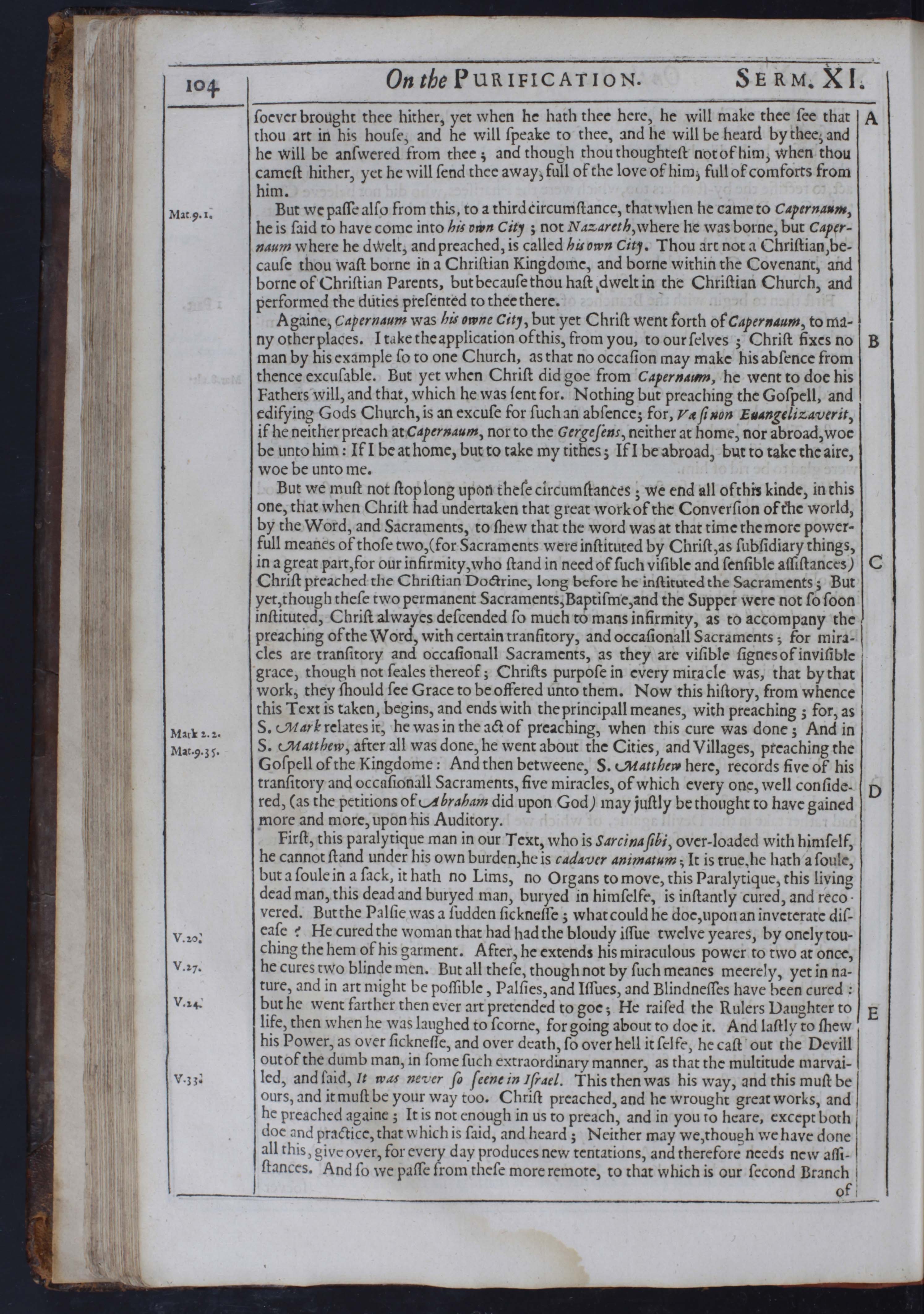 104
On the Purification.
Serm. XI.
soever brought thee hither, yet when he hath thee here, he will make thee see that
104
On the Purification.
Serm. XI.
soever brought thee hither, yet when he hath thee here, he will make thee see that
thou art in his house, and he will speake to thee, and he will be heard by thee, and
he will be answered from thee; and though thou thoughtest not of him, when thou
camest hither, yet he will send thee away, full of the love of him, full of comforts from
him.
But we passe also from this, Mat 9.1. to a third circumstance, that when he came to Capernaum,
he is said to have come into his own City; not Nazareth, where he was borne, but Caper-
naum where he dwelt, and preached, is called his own City. Thou art not a Christian, be-
cause thou wast borne in a Christian Kingdome, and borne within the Covenant, and
borne of Christian Parents, but because thou hast dwelt in the Christian Church, and
performed the duties presented to thee there.
Againe, Capernaum was his owne City, but yet Christ went forth of Capernaum, to ma-
ny other places. I take the application of this, from you, to our selves; Christ fixes no
man by his example so to one Church, as that no occasion may make his absence from
thence excusable. But yet when Christ did goe from Capernaum, he went to doe his
Fathers will, and that, which he was sent for. Nothing but preaching the Gospell, and
edifying Gods Church, is an excuse for such an absence; for, Væsi non Euangelizaverit,
if he neither preach at Capernaum, nor to the Gergesens, neither at home, nor abroad, woe
be unto him: If I be at home, but to take my tithes; If I be abroad, but to take the aire,
woe be unto me.
But we must not stop long upon these circumstances; we end all of this kinde, in this
one, that when Christ had undertaken that great work of the Conversion of the world,
by the Word, and Sacraments, to shew that the word was at that time the more power-
full meanes of those two, (for Sacraments were instituted by Christ, as subsidiary things,
in a great part, for our infirmity, who stand in need of such visible and sensible assistances)
Christ preached the Christian Doctrine, long before he instituted the Sacraments; But
yet, though these two permanent Sacraments, Baptisme, and the Supper were not so soon
instituted, Christ alwayes descended so much to mans infirmity, as to accompany the
preaching of the Word, with certain transitory, and occasionall Sacraments; for mira-
cles are transitory and occasionall Sacraments, as they are visible signes of invisible
grace, though not seales thereof; Christs purpose in every miracle was, that by that
work, they should see Grace to be offered unto them. Now this history, from whence
this Text is taken, begins, and ends with the principall meanes, with preaching; for, as
S. Mark relates it, Mark 2.2. he was in the act of preaching, when this cure was done; And in
S. Matthew,Mat. 9.35. after all was done, he went about the Cities, and Villages, preaching the
Gospell of the Kingdome: And then betweene, S. Matthew here, records five of his
transitory and occasionall Sacraments, five miracles, of which every one, well conside-
red, (as the petitions of Abraham did upon God) may justly be thought to have gained
more and more, upon his Auditory.
First, this paralytique man in our Text, who is Sarcinasibi, over-loaded with himself,
he cannot stand under his own burden, he is cadaver animatum; It is true, he hath a soule,
but a soule in a sack, it hath no Lims, no Organs to move, this Paralytique, this living
dead man, this dead and buryed man, buryed in himselfe, is instantly cured, and reco-
vered. But the Palsie was a sudden sicknesse; what could he doe, upon an inveterate dis-
ease? He cured the woman that had had the bloudy issue twelve yeares, V. 20. by onely tou-
ching the hem of his garment. After, he extends his miraculous power to two at once,
he cures two blinde men.V. 27. But all these, though not by such meanes meerely, yet in na-
ture, and in art might be possible, Palsies, and Issues, and Blindnesses have been cured:
but he went farther then ever art pretended to goe;V. 24. He raised the Rulers Daughter to
life, then when he was laughed to scorne, for going about to doe it. And lastly to shew
his Power, as over sicknesse, and over death, so over hell it selfe, he cast out the Devill
out of the dumb man, in some such extraordinary manner, as that the multitude marvai-
led, V. 33. and said, It was never so seene in Israel. This then was his way, and this must be
ours, and it must be your way too. Christ preached, and he wrought great works, and
he preached againe; It is not enough in us to preach, and in you to heare, except both
doe and practice, that which is said, and heard; Neither may we, though we have done
all this, give over, for every day produces new tentations, and therefore needs new assi-
stances. And so we passe from these more remote, to that which is our second Branch of
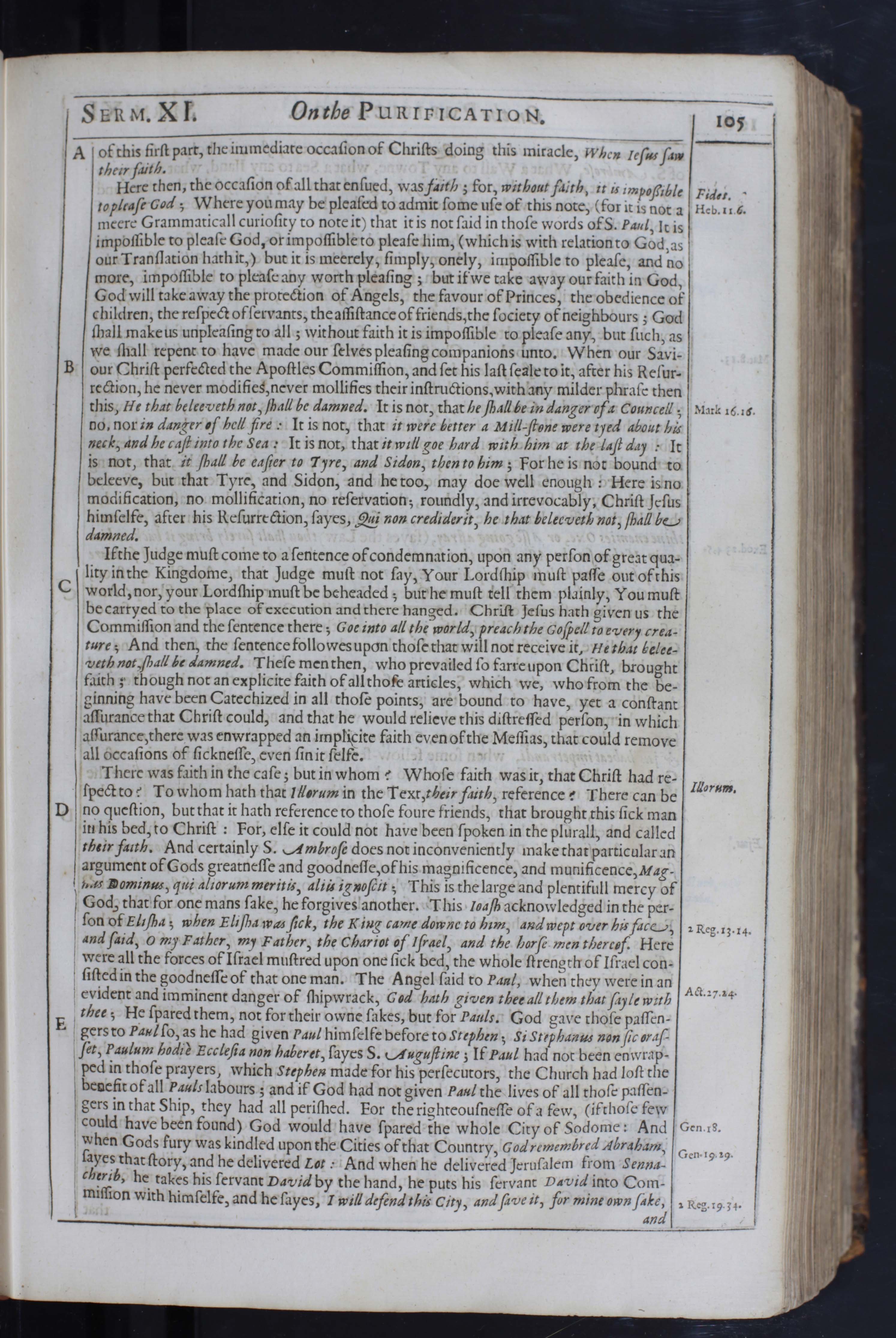 Serm. XI.
On the Purification.
105
of this first part, the immediate occasion of Christs doing this miracle, When Iesus saw
Serm. XI.
On the Purification.
105
of this first part, the immediate occasion of Christs doing this miracle, When Iesus saw
their faith.
Here then, the occasion of all that ensued, was faith; for, without faith,Fides.
Heb. 11.6. it is impossible
to please God; Where you may be pleased to admit some use of this note, (for it is not a
meere Grammaticall curiosity to note it) that it is not said in those words of S. Paul, It is
impossible to please God, or impossible to please him, (which is with relation to God, as
our Translation hath it,) but it is meerely, simply, onely, impossible to please, and no
more, impossible to please any worth pleasing; but if we take away our faith in God,
God will take away the protection of Angels, the favour of Princes, the obedience of
children, the respect of servants, the assistance of friends, the society of neighbours; God
shall make us unpleasing to all; without faith it is impossible to please any, but such, as
we shall repent to have made our selves pleasing companions unto. When our Savi-
our Christ perfected the Apostles Commission, and set his last seale to it, after his Resur-
rection, he never modifies, never mollifies their instructions, with any milder phrase then
this, He that beleeveth not, shall be damned. It is not, that he shall be in danger of a Councell;
Mark 16.16. no, nor in danger of hell fire: It is not, that it were better a Mill-stone were tyed about his
neck, and he cast into the Sea: It is not, that it will goe hard with him at the last day: It
is not, that it shall be easier to Tyre, and Sidon, then to him; For he is not bound to
beleeve, but that Tyre, and Sidon, and he too, may doe well enough: Here is no
modification, no mollification, no reservation; roundly, and irrevocably, Christ Jesus
himselfe, after his Resurrection, sayes, Qui non crediderit, he that beleeveth not, shall be
damned.
If the Judge must come to a sentence of condemnation, upon any person of great qua-
lity in the Kingdome, that Judge must not say, Your Lordship must passe out of this
world, nor, your Lordship must be beheaded; but he must tell them plainly, You must
be carryed to the place of execution and there hanged. Christ Jesus hath given us the
Commission and the sentence there; Goe into all the world, preach the Gospell to every crea-
ture; And then, the sentence followes upon those that will not receive it, He that belee-
veth not, shall be damned. These men then, who prevailed so farre upon Christ, brought
faith; though not an explicite faith of all those articles, which we, who from the be-
ginning have been Catechized in all those points, are bound to have, yet a constant
assurance that Christ could, and that he would relieve this distressed person, in which
assurance, there was enwrapped an implicite faith even of the Messias, that could remove
all occasions of sicknesse, even sin it selfe.
There was faith in the case; but in whom? Whose faith was it, Illorum. that Christ had re-
spect to? To whom hath that Illorum in the Text, their faith, reference? There can be
no question, but that it hath reference to those foure friends, that brought this sick man
in his bed, to Christ: For, else it could not have been spoken in the plurall, and called
their faith. And certainly S. Ambrose does not inconveniently make that particular an
argument of Gods greatnesse and goodnesse, of his magnificence, and munificence, Mag-
nus Dominus, qui aliorum meritis, aliis ignostit; This is the large and plentifull mercy of
God, that for one mans sake, he forgives another. This Ioash acknowledged in the per-
son of Elisha; when Elisha was sick, the King came downe to him, and wept over his face,
2 Reg. 13.14. and said, O my Father, my Father, the Chariot of Israel, and the horse men thereof. Here
were all the forces of Israel mustred upon one sick bed, the whole strength of Israel con-
sisted in the goodnesse of that one man. The Angel said to Paul, when they were in an
evident and imminent danger of shipwrack, Act. 27.24. God hath given thee all them that sayle with
thee; He spared them, not for their owne sakes, but for Pauls. God gave those passen-
gers to Paul so, as he had given Paul himselfe before to Stephen; Si Stephanus non sic oras-
set, Paulum hodiè Ecclesia non haberet, sayes S. Augustine; If Paul had not been enwrap-
ped in those prayers, which Stephen made for his persecutors, the Church had lost the
benefit of all Pauls labours; and if God had not given Paul the lives of all those passen-
gers in that Ship, they had all perished. For the righteousnesse of a few, (if those few
could have been found) God would have spared the whole City of Sodome:Gen. 18. And
when Gods fury was kindled upon the Cities of that Country, God remembred Abraham,
Gen. 19.29. sayes that story, and he delivered Lot: And when he delivered Jerusalem from Senna-
cherib, he takes his servant David by the hand, he puts his servant David into Com-
mission with himselfe, and he sayes, I will defend this City, and save it, for mine own sake,2 Reg. 19.34. and
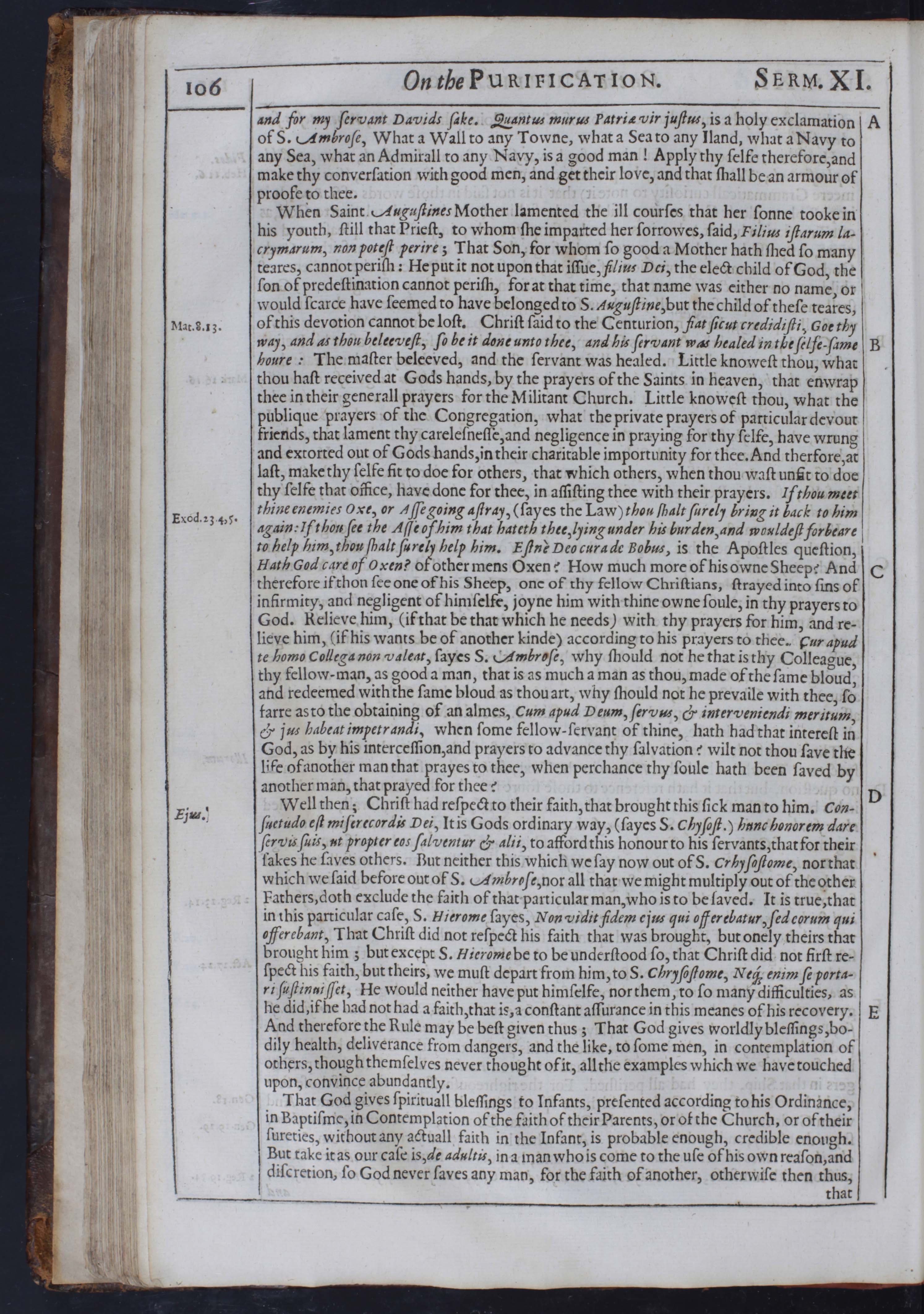 106
On the Purification.
Serm. XI.
and for my servant Davids sake. Quantus murus Patriæ vir justus, is a holy exclamation
106
On the Purification.
Serm. XI.
and for my servant Davids sake. Quantus murus Patriæ vir justus, is a holy exclamation
of S. Ambrose, What a Wall to any Towne, what a Sea to any Iland, what a Navy to
any Sea, what an Admirall to any Navy, is a good man! Apply thy selfe therefore, and
make thy conversation with good men, and get their love, and that shall be an armour of
proofe to thee.
When Saint Augustines Mother lamented the ill courses that her sonne tooke in
his youth, still that Priest, to whom she imparted her sorrowes, said, Filius istarum la-
crymarum, non potest perire; That Son, for whom so good a Mother hath shed so many
teares, cannot perish: He put it not upon that issue, filius Dci, the elect child of God, the
son of predestination cannot perish, for at that time, that name was either no name, or
would scarce have seemed to have belonged to S. Augustine, but the child of these teares,
of this devotion cannot be lost.Mat. 8.13. Christ said to the Centurion, fiat sicut credidisti, Goe thy
way, and as thou beleevest, so be it done unto thee, and his servant was healed in the selfe-same
houre: The master beleeved, and the servant was healed. Little knowest thou, what
thou hast received at Gods hands, by the prayers of the Saints in heaven, that enwrap
thee in their generall prayers for the Militant Church. Little knowest thou, what the
publique prayers of the Congregation, what the private prayers of particular devout
friends, that lament thy carelesnesse, and negligence in praying for thy selfe, have wrung
and extorted out of Gods hands, in their charitable importunity for thee. And therfore, at
last, make thy selfe fit to doe for others, that which others, when thou wast unfit to doe
thy selfe that office, have done for thee, in assisting thee with their prayers. If thou meet
thine enemies Oxe,Exod. 23 4, 5.Exod. 23.4, 5. or Asse going astray, (sayes the Law) thou shalt surely bring it back to him
again: If thou see the Asse of him that hateth thee, lying under his burden, and wouldest forbeare
to help him, thou shalt surely help him. Estnè Deo cura de Bobus, is the Apostles question,
Hath God care of Oxen? of other mens Oxen? How much more of his owne Sheep? And
therefore if thon see one of his Sheep, one of thy fellow Christians, strayed into sins of
infirmity, and negligent of himselfe, joyne him with thine owne soule, in thy prayers to
God. Relieve him, (if that be that which he needs) with thy prayers for him, and re-
lieve him, (if his wants be of another kinde) according to his prayers to thee. Cur apud
te homo Collega non valeat, sayes S. Ambrose, why should not he that is thy Colleague,
thy fellow-man, as good a man, that is as much a man as thou, made of the same bloud,
and redeemed with the same bloud as thou art, why should not he prevaile with thee, so
farre as to the obtaining of an almes, Cum apud Deum, servus, & interveniendi meritum,
& jus habe at impetrandi, when some fellow-servant of thine, hath had that interest in
God, as by his intercession, and prayers to advance thy salvation? wilt not thou save the
life of another man that prayes to thee, when perchance thy soule hath been saved by
another man, that prayed for thee?
Well then;Ejus. Christ had respect to their faith, that brought this sick man to him. Con-
suetudo est miserecordis Dei, It is Gods ordinary way, (sayes S. Chysost.) hunc honorem dare
servis suis, ut propter eos salventur & alii, to afford this honour to his servants, that for their
sakes he saves others. But neither this which we say now out of S.Chrysostome, nor that
which we said before out of S. Ambrose, nor all that we might multiply out of the other
Fathers, doth exclude the faith of that particular man, who is to be saved. It is true, that
in this particular case, S. Hierome sayes, Non vidit fidem ejus qui offer ebatur, sed corum qui
offerebant, That Christ did not respect his faith that was brought, but onely theirs that
brought him; but except S. Hierome be to be understood so, that Christ did not first re-
spect his faith, but theirs, we must depart from him, to S. Chrysostome, Ne enim se porta-
ri sustinuisset, He would neither have put himselfe, nor them, to so many difficulties, as
he did, if he had not had a faith, that is, a constant assurance in this meanes of his recovery.
And therefore the Rule may be best given thus; That God gives worldly blessings, bo-
dily health, deliverance from dangers, and the like, to some men, in contemplation of
others, though themselves never thought of it, all the examples which we have touched
upon, convince abundantly.
That God gives spirituall blessings to Infants, presented according to his Ordinance,
in Baptisme, in Contemplation of the faith of their Parents, or of the Church, or of their
sureties, without any actuall faith in the Infant, is probable enough, credible enough.
But take it as our case is, de adultis, in a man who is come to the use of his own reason, and
discretion, so God never saves any man, for the faith of another, otherwise then thus, that
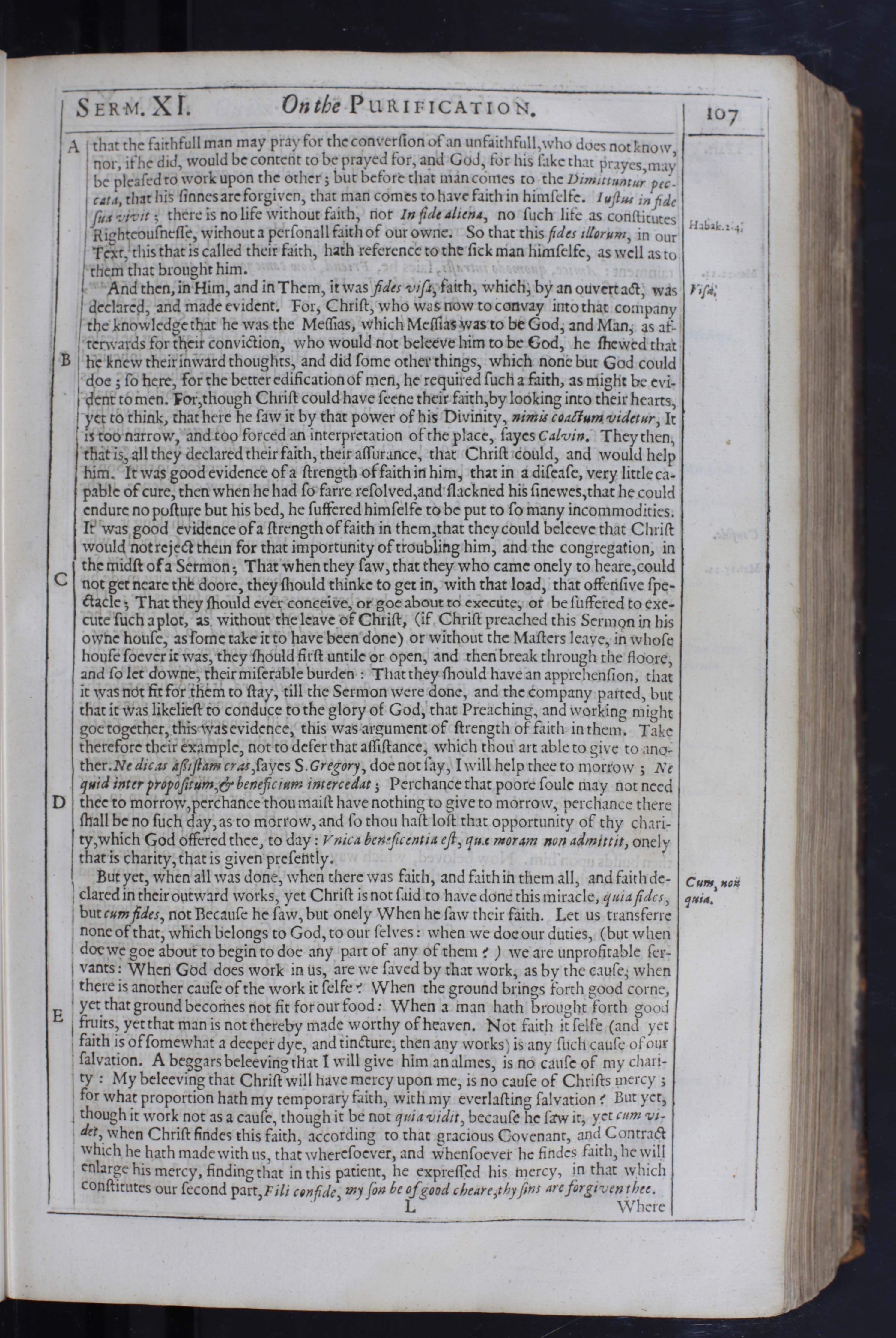 Serm. XI.
On the Purification.
107
that the faithfull man may pray for the conversion of an unfaithfull, who does not know,
Serm. XI.
On the Purification.
107
that the faithfull man may pray for the conversion of an unfaithfull, who does not know,
nor, if he did, would be content to be prayed for, and God, for his sake that prayes, may
be pleased to work upon the other; but before that man comes to the Dimittuntur pec-
cata, that his sinnes are forgiven, that man comes to have faith in himselfe. Iustus in fide
sua vivit; there is no life without faith, nor In fide aliena,Habak. 2.4. no such life as constitutes
Righteousnesse, without a personall faith of our owne. So that this fides illorum, in our
Text, this that is called their faith, hath reference to the sick man himselfe, as well as to
them that brought him.
And then, in Him, and in Them, it was fides visa, faith, which, by an ouvert act, Visæ. was
declared, and made evident. For, Christ, who was now to convay into that company
the knowledge that he was the Messias, which Messias was to be God, and Man, as af-
terwards for their conviction, who would not beleeve him to be God, he shewed that
he knew their inward thoughts, and did some other things, which none but God could
doe; so here, for the better edification of men, he required such a faith, as might be evi-
dent to men. For, though Christ could have seene their faith, by looking into their hearts,
yet to think, that here he saw it by that power of his Divinity, nimis coactum videtur, It
is too narrow, and too forced an interpretation of the place, sayes Calvin. They then,
that is, all they declared their faith, their assurance, that Christ could, and would help
him. It was good evidence of a strength of faith in him, that in a disease, very little ca-
pable of cure, then when he had so farre resolved, and slackned his sinewes, that he could
endure no posture but his bed, he suffered himselfe to be put to so many incommodities.
It was good evidence of a strength of faith in them, that they could beleeve that Christ
would not reject them for that importunity of troubling him, and the congregation, in
the midst of a Sermon; That when they saw, that they who came onely to heare, could
not get neare the doore, they should thinke to get in, with that load, that offensive spe-
ctacle; That they should ever conceive, or goe about to execute, or be suffered to exe-
cute such a plot, as without the leave of Christ, (if Christ preached this Sermon in his
owne house, as some take it to have been done) or without the Masters leave, in whose
house soever it was, they should first untile or open, and then break through the floore,
and so let downe, their miserable burden: That they should have an apprehension, that
it was not fit for them to stay, till the Sermon were done, and the company parted, but
that it was likeliest to conduce to the glory of God, that Preaching, and working might
goe together, this was evidence, this was argument of strength of faith in them. Take
therefore their example, not to defer that assistance, which thou art able to give to ano-
ther. Ne dicas assistam cras, sayes S. Gregory, doe not say, I will help thee to morrow; Ne
quid inter propositum, & beneficium intercedat; Perchance that poore soule may not need
thee to morrow, perchance thou maist have nothing to give to morrow, perchance there
shall be no such day, as to morrow, and so thou hast lost that opportunity of thy chari-
ty, which God offered thee, to day: Vnica beneficentia est, quæ moram non admittit, onely
that is charity, that is given presently.
But yet, when all was done, when there was faith, and faith in them all, Cum, non
quia. and faith de-
clared in their outward works, yet Christ is not said to have done this miracle, quia sides,
but cum fides, not Because he saw, but onely When he saw their faith. Let us transferre
none of that, which belongs to God, to our selves: when we doe our duties, (but when
doe we goe about to begin to doe any part of any of them?) we are unprofitable ser-
vants: When God does work in us, are we saved by that work, as by the cause, when
there is another cause of the work it selfe? When the ground brings forth good corne,
yet that ground becomes not fit for our food: When a man hath brought forth good
fruits, yet that man is not thereby made worthy of heaven. Not faith it selfe (and yet
faith is of somewhat a deeper dye, and tincture, then any works) is any such cause of our
salvation. A beggars beleeving that I will give him an almes, is no cause of my chari-
ty: My beleeving that Christ will have mercy upon me, is no cause of Christs mercy;
for what proportion hath my temporary faith, with my everlasting salvation? But yet,
though it work not as a cause, though it be not qui a vidit, because he saw it, yet cum vi-
det, when Christ findes this faith, according to that gracious Covenant, and Contract
which he hath made with us, that wheresoever, and whensoever he findes faith, he will
enlarge his mercy, finding that in this patient, he expressed his mercy, in that which
constitutes our second part, Fili confide, my son be of good cheare, thy sins are forgiven thee. L Where
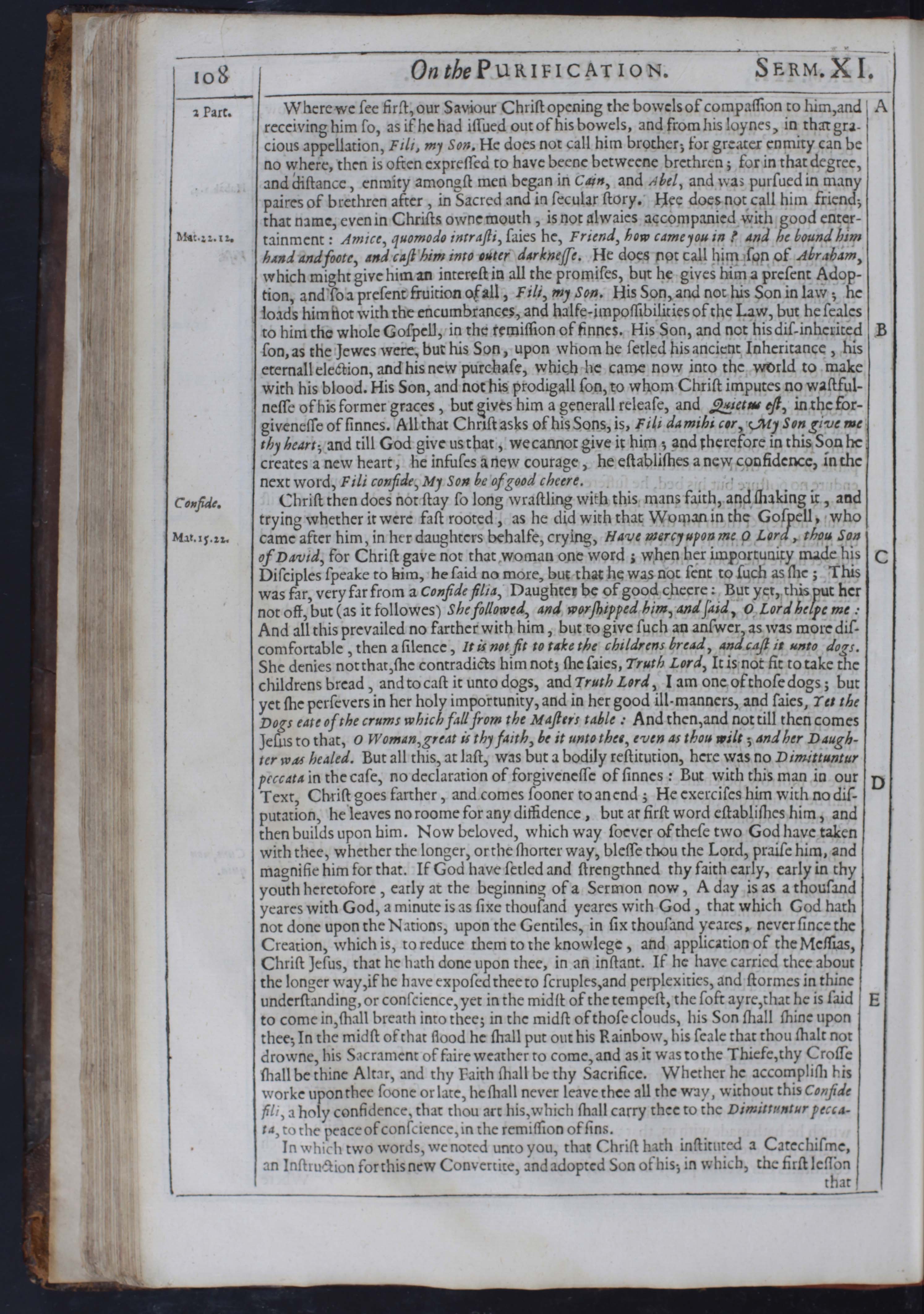 108
On the Purification.
Serm. XI.
108
On the Purification.
Serm. XI.
Where we see first, 2 Part. our Saviour. Christ opening the bowels of compassion to him, and
receiving him so, as if he had issued out of his bowels, and from his loynes, in that gra-
cious appellation, Fili, my Son. He does not call him brother; for greater enmity can be
no where, then is often expressed to have beene betweene brethren; for in that degree,
and distance, enmity amongst men began in Cain, and Abel, and was pursued in many
paires of brethren after, in Sacred and in secular story. Hee does not call him friend;
that name, even in Christs owne mouth, is not alwaies accompanied with good enter-
tainment: Amice,Mat. 22.12. quomodo intrasti, saies he, Friend, how came you in? and he bound him
hand and foote, and cast him into outer darknesse. He does not call him son of Abraham,
which might give him an interest in all the promises, but he gives him a present Adop-
tion, and so a present fruition of all, Fili, my Son. His Son, and not his Son in law; he
loads him not with the encumbrances, and halfe-impossibilities of the Law, but he seales
to him the whole Gospell, in the remission of sinnes. His Son, and not his dis-inherited
son, as the Jewes were, but his Son, upon whom he setled his ancient Inheritance, his
eternall election, and his new purchase, which he came now into the world to make
with his blood. His Son, and not his prodigall son, to whom Christ imputes no wastful-
nesse of his former graces, but gives him a generall release, and Quietus est, in the for-
givenesse of sinnes. All that Christ asks of his Sons, is, Fili da mihi cor, My Son give me
thy heart; and till God give us that, we cannot give it him; and therefore in this Son he
creates a new heart, he infuses a new courage, he establishes a new confidence, in the
next word, Fili confide, My Son be of good cheere.
Christ then does not stay so long wrastling with this mans faith, Confide. and shaking it, and
trying whether it were fast rooted, as he did with that Woman in the Gospell, who
came after him, Mat. 15.22. in her daughters behalfe, crying, Have mercy upon me O Lord, thou Son
of David, for Christ gave not that woman one word; when her importunity made his
Disciples speake to him, he said no more, but that he was not sent to such as she; This
was far, very far from a Confide filia, Daughter be of good cheere: But yet, this put her
not oft, but (as it followes) She followed, and worshipped him, and said, O Lord helpe me:
And all this prevailed no farther with him, but to give such an answer, as was more dis-
comfortable, then a silence, It is not fit to take the childrens bread, and cast it unto dogs.
She denies not that, she contradicts him not; she saies, Truth Lord, It is not fit to take the
childrens bread, and to cast it unto dogs, and Truth Lord, I am one of those dogs; but
yet she persevers in her holy importunity, and in her good ill-manners, and saies, Yet the
Dogs eate of the crums which fall from the Masters table: And then, and not till then comes
Jesus to that, O Woman, great is thy faith, be it unto thee, even as thou wilt; and her Daugh-
ter was healed. But all this, at last, was but a bodily restitution, here was no Dimittuntur
peccata in the case, no declaration of forgivenesse of sinnes: But with this man in our
Text, Christ goes farther, and comes sooner to an end; He exercises him with no dis-
putation, he leaves no roome for any diffidence, but at first word establishes him, and
then builds upon him. Now beloved, which way soever of these two God have taken
with thee, whether the longer, or the shorter way, blesse thou the Lord, praise him, and
magnifie him for that. If God have setled and strengthned thy faith early, early in thy
youth heretofore, early at the beginning of a Sermon now, A day is as a thousand
yeares with God, a minute is as sixe thousand yeares with God, that which God hath
not done upon the Nations, upon the Gentiles, in six thousand yeares, never since the
Creation, which is, to reduce them to the knowlege, and application of the Messias,
Christ Jesus, that he hath done upon thee, in an instant. If he have carried thee about
the longer way, if he have exposed thee to scruples, and perplexities, and stormes in thine
understanding, or conscience, yet in the midst of the tempest, the soft ayre, that he is said
to come in, shall breath into thee; in the midst of those clouds, his Son shall shine upon
thee; In the midst of that flood he shall put out his Rainbow, his seale that thou shalt not
drowne, his Sacrament of faire weather to come, and as it was to the Thiefe, thy Crosse
shall be thine Altar, and thy Faith shall be thy Sacrifice. Whether he accomplish his
worke-upon thee soone or late, he shall never leave thee all the way, without this Confide
fili, a holy confidence, that thou art his, which shall carry thee to the Dimittuntur pecca-
ta, to the peace of conscience, in the remission of sins.
In which two words, we noted unto you, that Christ hath instituted a Catechisme,
an Instruction for this new Convertite, and adopted Son of his; in which, the first lesson that
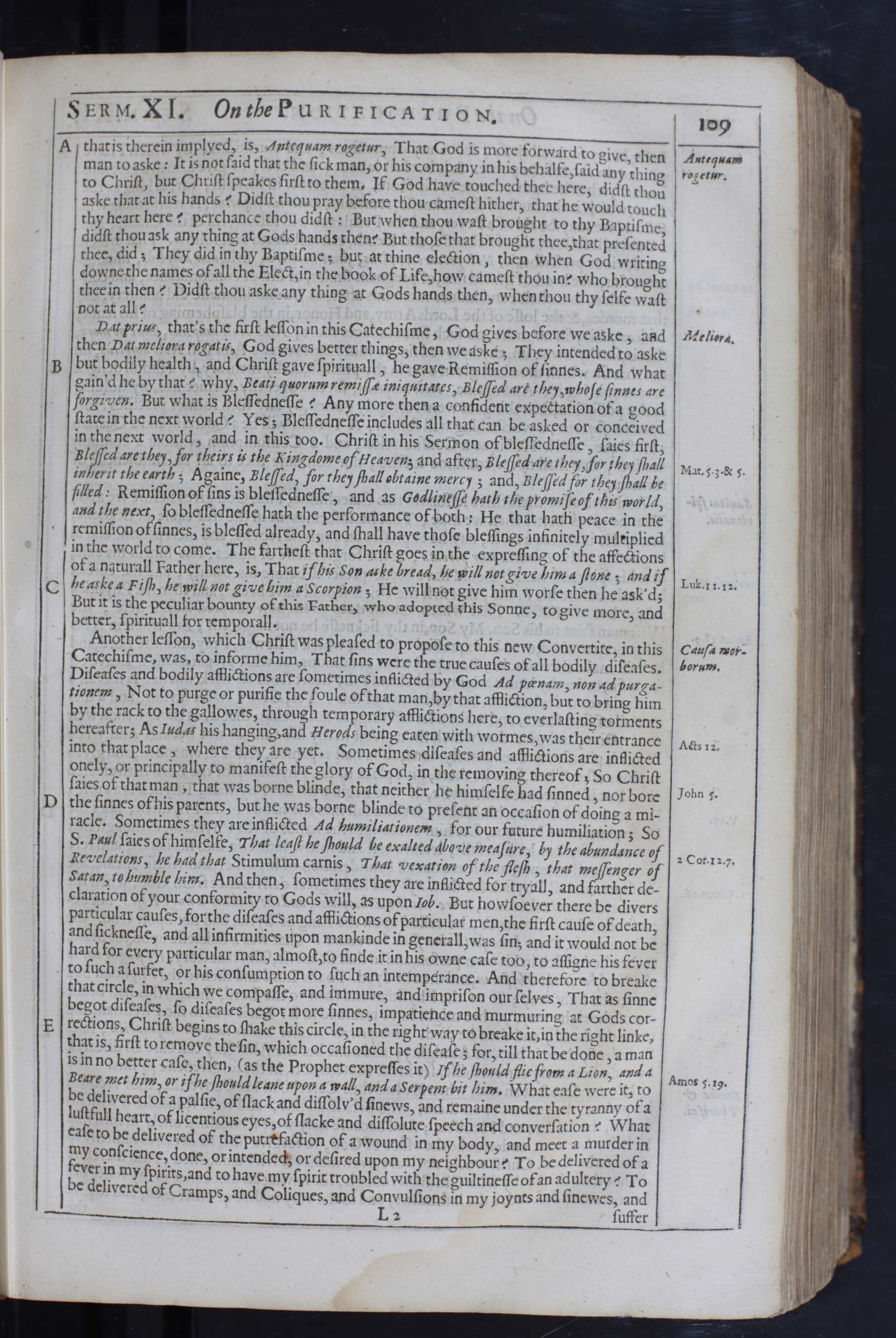 Serm. XI.
On the Purification.
109
that is therein implyed, is, Antequam
Serm. XI.
On the Purification.
109
that is therein implyed, is, Antequam rogetur, That God is more forward to give, Antequam rogetur. then
man to aske: It is not said that the sick man, or his company in his behalfe, said any thing
to Christ, but Christ speakes first to them. If God have touched thee here, didst thou
aske that at his hands? Didst thou pray before thou camest hither, that he would touch
thy heart here? perchance thou didst: But when thou wast brought to thy Baptisme,
didst thou ask any thing at Gods hands then? But those that brought thee, that presented
thee, did; They did in thy Baptisme; but at thine election, then when God writing
downe the names of all the Elect, in the book of Life, how camest thou in? who brought
thee in then? Didst thou aske any thing at Gods hands then, when thou thy selfe wast
not at all?
Dat prius, that's the first lesson in this Catechisme, God gives before we aske, Meliora. and
then Dat meliora rogatis, God gives better things, then we aske; They intended to aske
but bodily health, and Christ gave spirituall, he gave Remission of sinnes. And what
gain'd he by that? why, Beati quorum remissæ iniquitates, Blessed are they, whose sinnes are
forgiven. But what is Blessednesse? Any more then a consident expectation of a good
state in the next world? Yes; Blessednesse includes all that can be asked or conceived
in the next world, and in this too. Christ in his Sermon of blessednesse, saies first,
Blessed are they, for theirs is the Kingdome of Heaven; and after, Blessed are they,Mat. 5.3. & 5. for they shall
in her it the earth; Againe, Blessed, for they shall obtaine mercy; and, Blessed for they shall be
filled: Remission of sins is blessednesse, and as Godlinesse hath the promise of this world,
and the next, so blessednesse hath the performance of both: He that hath peace in the
remission of sinnes, is blessed already, and shall have those blessings infinitely multiplied
in the world to come. The farthest that Christ goes in the expressing of the affections
of a naturall Father here, is, That if his Son aske bread, he will not give him a stone;Luk. 11.12. and if
he aske a Fish, he will not give him a Scorpion; He will not give him worse then he ask'd;
But it is the peculiar bounty of this Father, who adopted this Sonne, to give more, and
better, spirituall for temporall.
Another lesson, which Christ was pleased to propose to this new Convertite, Causa mor-
borum. in this
Catechisme, was, to informe him, That sins were the true causes of all bodily diseases.
Diseases and bodily afflictions are sometimes inflicted by God Ad pœnam, non ad purga-
tionem, Not to purge or purifie the soule of that man, by that affliction, but to bring him
by the rack to the gallowes, through temporary afflictions here, to everlasting torments
hereafter; As Iudas his hanging, and Herods being eaten with wormes, Acts 12. was their entrance
into that place, where they are yet. Sometimes diseases and afflictions are inflicted
onely, or principally to manifest the glory of God, in the removing thereof; So Christ
saies of that man, that was borne blinde, that neither he himselfe had sinned, John 5. nor bore
the sinnes of his parents, but he was borne blinde to present an occasion of doing a mi-
racle. Sometimes they are inflicted Ad humiliationem, for our future humiliation; So
S. Paul saies of himselfe, That least he should be exalted above measure,2 Cor. 12.7. by the abundance of
Revelations, he had that Stimulum carnis, That vexation of the flesh, that messenger of
Satan, to humble him. And then, sometimes they are inflicted for tryall, and farther de-
claration of your conformity to Gods will, as upon Iob. But howsoever there be divers
particular causes, for the diseases and afflictions of particular men, the first cause of death,
and sicknesse, and all infirmities upon mankinde in generall, was sin; and it would not be
hard for every particular man, almost, to finde it in his owne case too, to assigne his fever
to such a surfet, or his consumption to such an intemperance. And therefore to breake
that circle, in which we compasse, and immure, and imprison our selves, That as sinne
begot diseases, so diseases begot more sinnes, impatience and murmuring at Gods cor-
rections, Christ begins to shake this circle, in the right way to breake it, in the right linke,
that is, first to remove the sin, which occasioned the disease; for, till that be done, a man
is in no better case, then, (as the Prophet expresses it) If he should flie from a Lion,Amos 5.19. and a
Beare met him, or if he should leane upon a wall, and a Serpent bit him. What ease were it, to
be delivered of a palsie, of slack and dissolv'd sinews, and remaine under the tyranny of a
lustfull heart, of licentious eyes, of slacke and dissolute speech and conversation? What
ease to be delivered of the putrefaction of a wound in my body, and meet a murder in
my conscience, done, or intended, or desired upon my neighbour? To be delivered of a
fever in my spirits, and to have my spirit troubled with the guiltinesse of an adultery? To
be delivered of Cramps, and Coliques, and Convulsions in my joynts and sinewes, and L2 suffer
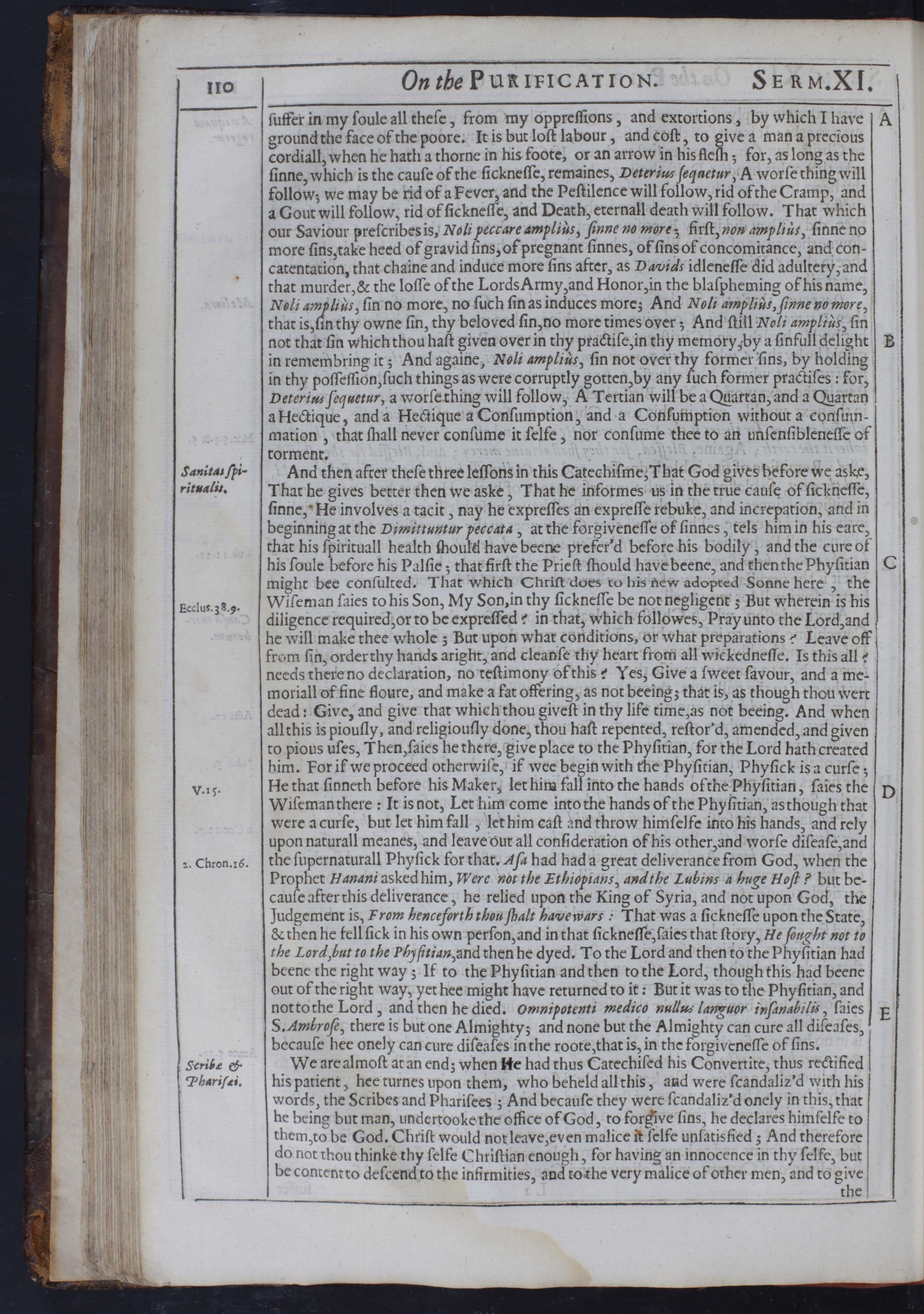 110
On the Purification.
Serm. XI.
suffer in my soule all these, from my oppressions, and extortions, by which I have
110
On the Purification.
Serm. XI.
suffer in my soule all these, from my oppressions, and extortions, by which I have
ground the face of the poore. It is but lost labour, and cost, to give a man a precious
cordiall, when he hath a thorne in his foote, or an arrow in his flesh; for, as long as the
sinne, which is the cause of the sicknesse, remaines, Deterius sequetur, A worse thing will
follow; we may be rid of a Fever, and the Pestilence will follow, rid of the Cramp, and
a Gout will follow, rid of sicknesse, and Death, eternall death will follow. That which
our Saviour prescribes is, Noli peccare ampliùs, sinne no more; first, non ampliùs, sinne no
more sins, take heed of gravid sins, of pregnant sinnes, of sins of concomitance, and con-
catentation, that chaine and induce more sins after, as Davids idlenesse did adultery, and
that murder, & the losse of the Lords Army, and Honor, in the blaspheming of his name,
Noli ampliùs, sin no more, no such sin as induces more; And Noli ampliùs, sinne no more,
that is, sin thy owne sin, thy beloved sin, no more times over; And still Noli ampliùs, sin
not that sin which thou hast given over in thy practise, in thy memory, by a sinfull delight
in remembring it; And againe, Noli ampliùs, sin not over thy former sins, by holding
in thy possession; such things as were corruptly gotten, by any such former practises: for,
Deterius sequetur, a worse thing will follow, A Tertian will be a Quartan, and a Quartan
a Hectique, and a Hectique a Consumption, and a Consumption without a consum-
mation, that shall never consume it selfe, nor consume thee to an unsensiblenesse of
torment.
And then after these three lessons in this Catechisme, Sanitas spi-
ritualis. That God gives before we aske,
That he gives better then we aske, That he informes us in the true cause of sicknesse,
sinne, He involves a tacit, nay he expresses an expresse rebuke, and increpation, and in
beginning at the Dimittuntur peccata, at the forgivenesse of sinnes, tels him in his eare,
that his spirituall health should have beene prefer'd before his bodily, and the cure of
his soule before his Palsie; that first the Priest should have beene, and then the Physitian
might bee consulted. That which Christ does to his new adopted Sonne here, the
Wiseman saies to his Son, Ecclus. 38.9. My Son, in thy sicknesse be not negligent; But wherein is his
diligence required, or to be expressed? in that, which followes, Pray unto the Lord, and
he will make thee whole; But upon what conditions, or what preparations? Leave off
from sin, order thy hands aright, and cleanse thy heart from all wickednesse. Is this all?
needs there no declaration, no testimony of this? Yes, Give a sweet savour, and a me-
moriall of fine floure, and make a fat offering, as not beeing; that is, as though thou wert
dead: Give, and give that which thou givest in thy life time, as not beeing. And when
all this is piously, and religiously done, thou hast repented, restor'd, amended, and given
to pious uses, Then, saies he there, give place to the Physitian, for the Lord hath created
him. For if we proceed otherwise, if wee begin with the Physitian, Physick is a curse;
He that sinneth before his Maker, V. 15. let him fall into the hands of the Physitian, saies the
Wiseman there: It is not, Let him come into the hands of the Physitian, as though that
were a curse, but let him fall, let him cast and throw himselfe into his hands, and rely
upon naturall meanes, and leave out all consideration of his other, and worse disease, and
the supernaturall Physick for that.2. Chron. 16. Asa had had a great deliverance from God, when the
Prophet Hanani asked him, Were not the Ethiopians, and the Lubins a huge Host? but be-
cause after this deliverance, he relied upon the King of Syria, and not upon God, the
Judgement is, From henceforth thou shalt have wars: That was a sicknesse upon the State,
& then he fell sick in his own person, and in that sicknesse, saies that story, He sought not to
the Lord, but to the Physitian, and then he dyed. To the Lord and then to the Physitian had
beene the right way; If to the Physitian and then to the Lord, though this had beene
out of the right way, yet hee might have returned to it: But it was to the Physitian, and
not to the Lord, and then he died. Omnipotenti medico nullus languor insanabilis, saies
S. Ambrose, there is but one Almighty; and none but the Almighty can cure all diseases,
because hee onely can cure diseases in the roote, that is, in the forgivenesse of sins.
We are almost at an end; when wehe had thus Catechised his Convertite, thus rectified
his patient, Scribæ &
Pharisæi. hee turnes upon them, who beheld all this, and were scandaliz'd with his
words, the Scribes and Pharisees; And because they were scandaliz'd onely in this, that
he being but man, undertooke the office of God, to forgive sins, he declares himselfe to
them, to be God. Christ would not leave, even malice it selfe unsatisfied; And therefore
do not thou thinke thy selfe Christian enough, for having an innocence in thy selfe, but
be content to descend to the infirmities, and to the very malice of other men, and to give the
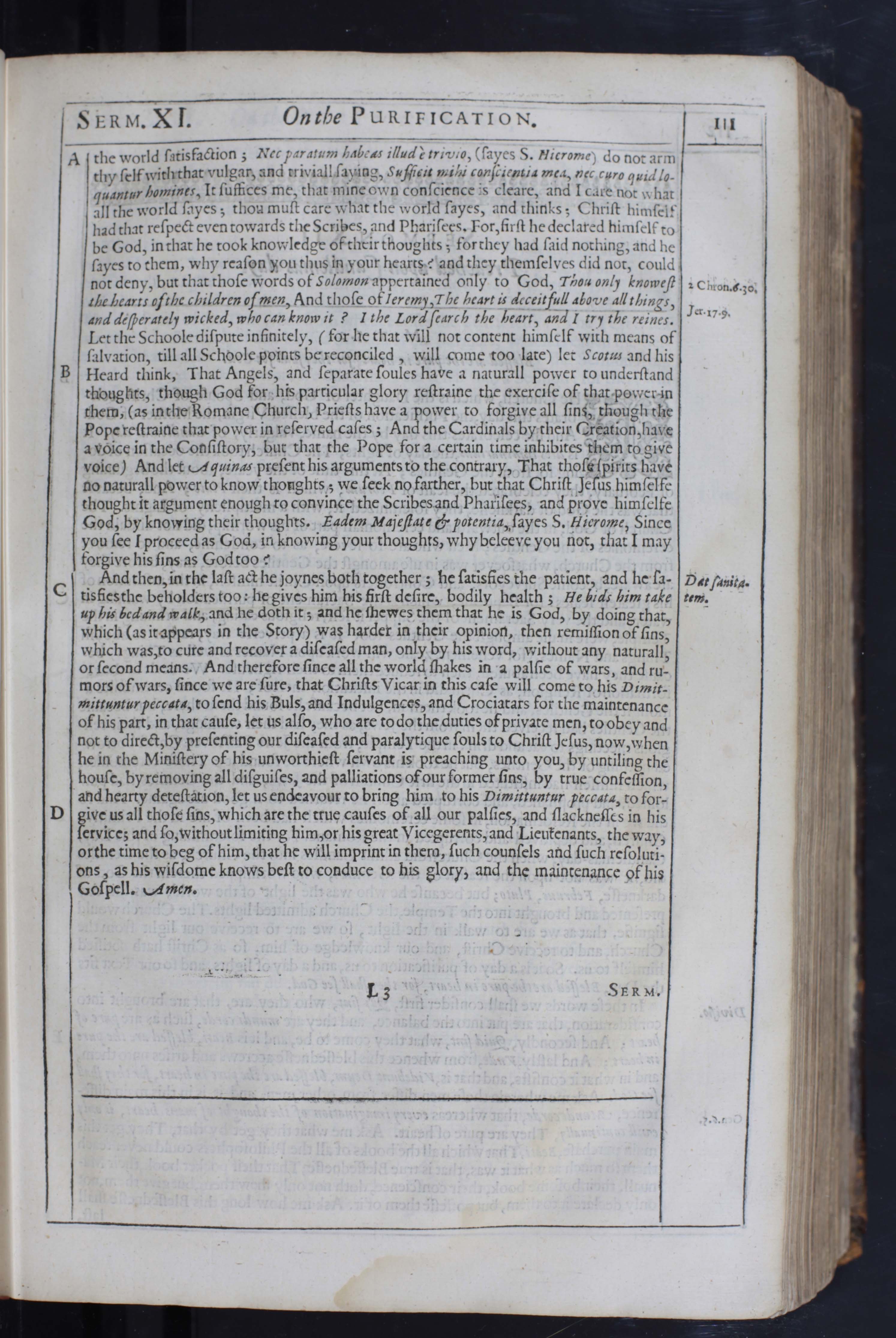 Serm. XI.
On the Purification.
111
the world satisfaction; Nec paratum habeas illud ètrivio, (sayes S. Hierome) do not arm
Serm. XI.
On the Purification.
111
the world satisfaction; Nec paratum habeas illud ètrivio, (sayes S. Hierome) do not arm
thy self with that vulgar, and triviall saying, Sufficit mihi conscientia mea, nec curo quid lo-
quantur homines, It suffices me, that mine own conscience is cleare, and I care not what
all the world sayes; thou must care what the world sayes, and thinks; Christ himself
had that respect even towards the Scribes, and Pharisees. For, first he declared himself to
be God, in that he took knowledge of their thoughts; for they had said nothing, and he
sayes to them, why reason you thus in your hearts? and they themselves did not, could
not deny, but that those words of Solomon appertained only to God, 2 Chron. 6.30. Thou only knowest
the hearts of the children of men, And those of Ieremy, The heart is deceitfull above all things,
Jer. 17.9. and desperately wicked, who can know it? I the Lord search the heart, and I try the reines.
Let the Schoole dispute infinitely, (for he that will not content himself with means of
salvation, till all Schoole points be reconciled, will come too late) let Scotus and his
Heard think, That Angels, and separate soules have a naturall power to understand
thoughts, though God for his particular glory restraine the exercise of that power in
them, (as in the Romane Church, Priests have a power to forgive all sins, though the
Pope restraine that power in reserved cases; And the Cardinals by their Creation, have
a voice in the Consistory, but that the Pope for a certain time inhibites them to give
voice) And let Aquinas present his arguments to the contrary, That those spirits have
no naturall power to know thoughts; we seek no farther, but that Christ Jesus himselfe
thought it argument enough to convince the Scribes and Pharisees, and prove himselfe
God, by knowing their thoughts. Eadem Majestate & potentia, sayes S. Hierome, Since
you see I proceed as God, in knowing your thoughts, why beleeve you not, that I may
forgive his sins as God too?
And then, in the last act he joynes both together; he satisfies the patient, Dat sanita-
tem. and he sa-
tisfies the beholders too: he gives him his first desire, bodily health; He bids him take
up his bed and walk, and he doth it; and he shewes them that he is God, by doing that,
which (as it appears in the Story) was harder in their opinion, then remission of sins,
which was, to cure and recover a diseased man, only by his word, without any naturall,
or second means. And therefore since all the world shakes in a palsie of wars, and ru-
mors of wars, since we are sure, that Christs Vicar in this case will come to his Dimit-
mittuntur peccata, to send his Buls, and Indulgences, and Crociatars for the maintenance
of his part, in that cause, let us also, who are to do the duties of private men, to obey and
not to direct, by presenting our diseased and paralytique souls to Christ Jesus, now, when
he in the Ministery of his unworthiest servant is preaching unto you, by untiling the
house, by removing all disguises, and palliations of our former sins, by true confession,
and hearty detestation, let us endeavour to bring him to his Dimittuntur peccata, to for-
give us all those sins, which are the true causes of all our palsies, and slacknesses in his
service; and so, without limiting him, or his great Vicegerents, and Lieutenants, the way,
or the time to beg of him, that he will imprint in them, such counsels and such resoluti-
ons, as his wisdome knows best to conduce to his glory, and the maintenance
of his Gospell. Amen. L3 Serm.
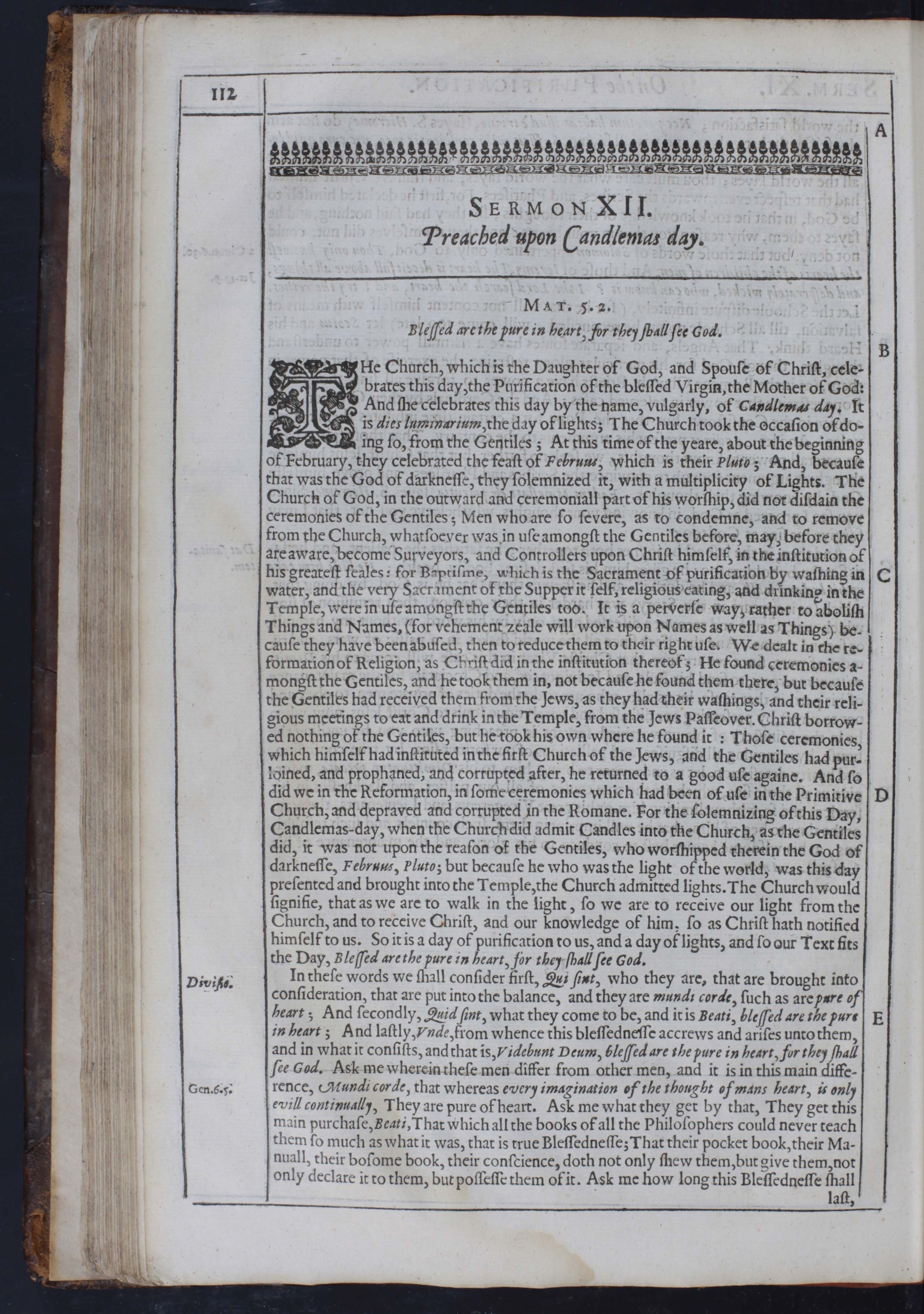 112
112
Sermon XII.
Preached upon Candlemas day.
Mat. 5.2.5.8.
Blessed are the pure in heart, for they shall see God.
THeThe Church, which is the Daughter of God, and Spouse of Christ, cele-
brates this day, the Purification of the blessed Virgin, the Mother of God:
And she celebrates this day by the name, vulgarly, of Candlemas day. It
is dies luminarium, the day of lights; The Church took the occasion of do-
ing so, from the Gentiles; At this time of the yeare, about the beginning
of February, they celebrated the feast of Februus, which is their Pluto; And, because
that was the God of darknesse, they solemnized it, with a multiplicity of Lights. The
Church of God, in the outward and ceremoniall part of his worship, did not disdain the
ceremonies of the Gentiles; Men who are so severe, as to condemne, and to remove
from the Church, whatsoever was in use amongst the Gentiles before, may, before they
are aware, become Surveyors, and Controllers upon Christ himself, in the institution of
his greatest seales: for Baptisme, which is the Sacrament of purification by washing in
water, and the very Sacrament of the Supper it self, religious eating, and drinking in the
Temple, were in use amongst the Gentiles too. It is a perverse way, rather to abolish
Things and Names, (for vehement zeale will work upon Names as well as Things) be-
cause they have been abused, then to reduce them to their right use. We dealt in the re-
formation of Religion, as Christ did in the institution thereof; He found ceremonies a-
mongst the Gentiles, and he took them in, not because he found them there, but because
the Gentiles had received them from the Jews, as they had their washings, and their reli-
gious meetings to eat and drink in the Temple, from the Jews Passeover. Christ borrow-
ed nothing of the Gentiles, but he took his own where he found it: Those ceremonies,
which himself had instituted in the first Church of the Jews, and the Gentiles had pur-
loined, and prophaned, and corrupted after, he returned to a good use againe. And so
did we in the Reformation, in some ceremonies which had been of use in the Primitive
Church, and depraved and corrupted in the Romane. For the solemnizing of this Day,
Candlemas-day, when the Church did admit Candles into the Church, as the Gentiles
did, it was not upon the reason of the Gentiles, who worshipped therein the God of
darknesse, Februus, Pluto; but because he who was the light of the world, was this day
presented and brought into the Temple, the Church admitted lights. The Church would
signifie, that as we are to walk in the light, so we are to receive our light from the
Church, and to receive Christ, and our knowledge of him, so as Christ hath notified
himself to us. So it is a day of purification to us, and a day of lights, and so our Text fits
the Day, Blessed are the pure in heart, for they shall see God.
In these words we shall consider first, Divisio. Qui sint, who they are, that are brought into
consideration, that are put into the balance, and they are mundi corde, such as are pure of
heart; And secondly, Quid sint, what they come to be, and it is Beati, blessed are the pure
in heart; And lastly, Vnde, from whence this blessednesse accrews and arises unto them,
and in what it consists, and that is, Videbunt Deum, blessed are the pure in heart, for they shall
see God. Gen.6.5. Ask me wherein these men differ from other men, and it is in this main diffe-
rence, Mundi corde, that whereas every imagination of the thought of mans heart, is only
evill continually, They are pure of heart. Ask me what they get by that, They get this
main purchase, Beati, That which all the books of all the Philosophers could never teach
them so much as what it was, that is true Blessednesse; That their pocket book, their Ma-
nuall, their bosome book, their conscience, doth not only shew them, but give them, not
only declare it to them, but possesse them of it. Ask me how long this Blessednesse shall last,
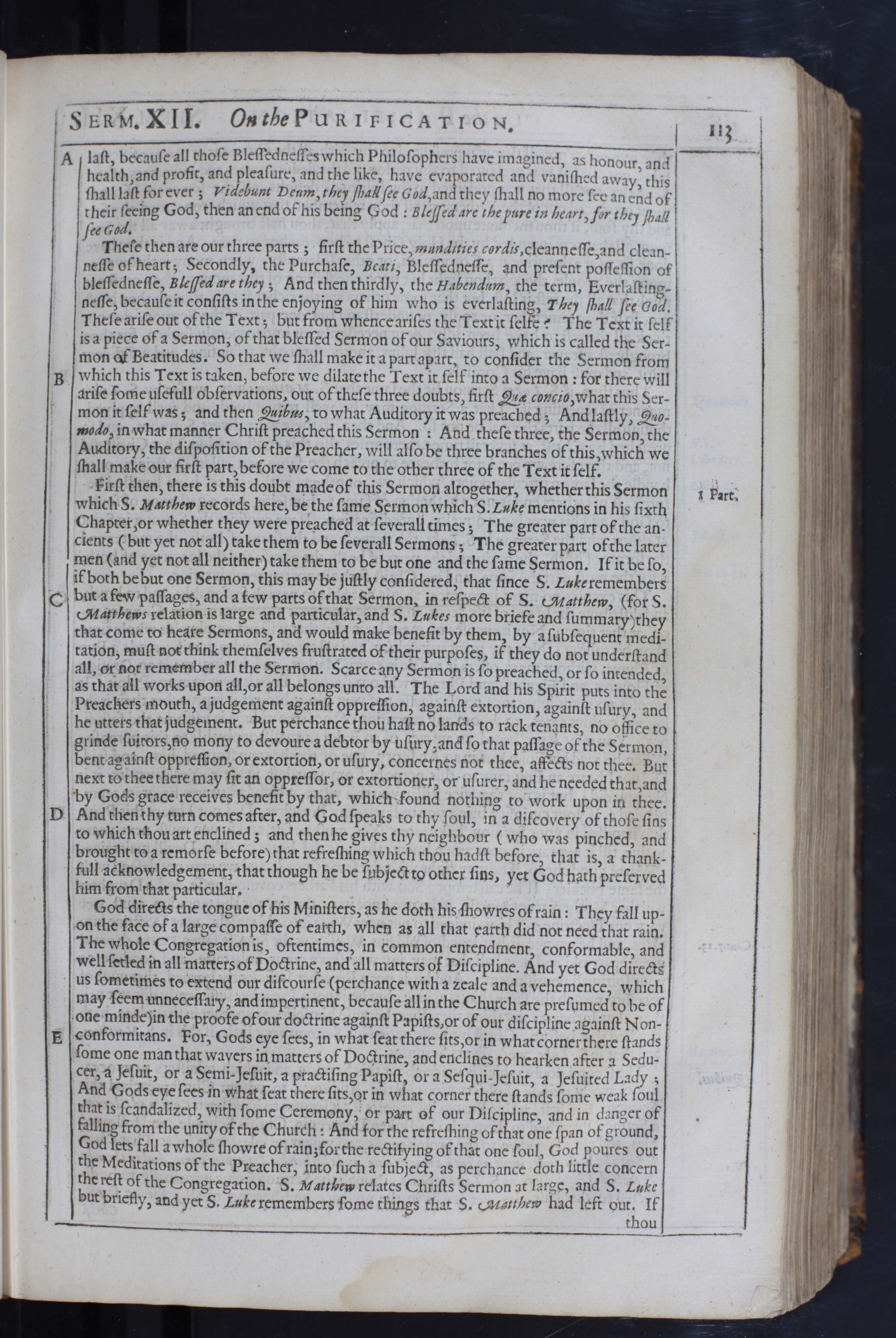 Serm. XII.
On the Purification.
113
last, because all those Blessednesses which Philosophers have imagined, as honour, and
Serm. XII.
On the Purification.
113
last, because all those Blessednesses which Philosophers have imagined, as honour, and
health, and profit, and pleasure, and the like, have evaporated and vanished away, this
shall last for ever; Videbunt Deum, they shall see God, and they shall no more see an end of
their seeing God, then an end of his being God: Blessed are the pure in heart, for they shall
see God. These then are our three parts; first the Price, mundities cordis, cleannesse, and clean-
nesse of heart; Secondly, the Purchase, Beati, Blessednesse, and present possession of
blessednesse, Blessed are they; And then thirdly, the Habendum, the term, Everlasting-
nesse, because it consists in the enjoying of him who is everlasting, They shall see God.
These arise out of the Text; but from whence arises the Text it selfe? The Text it self
is a piece of a Sermon, of that blessed Sermon of our Saviours, which is called the Ser-
mon of Beatitudes. So that we shall make it a part apart, to consider the Sermon from
which this Text is taken, before we dilate the Text it self into a Sermon: for there will
arise some usefull observations, out of these three doubts, first Quæ concio, what this Ser-
mon it self was; and then Quibus, to what Auditory it was preached; And lastly, Quo-
modo, in what manner Christ preached this Sermon: And these three, the Sermon, the
Auditory, the disposition of the Preacher, will also be three branches of this, which we
shall make our first part, before we come to the other three of the Text it self.
First then, there is this doubt made of this Sermon altogether, whether this Sermon 1 Part.
which S. Matthew records here, be the same Sermon which S. Luke mentions in his sixth
Chapter, or whether they were preached at severall times; The greater part of the an-
cients (but yet not all) take them to be severall Sermons; The greater part of the later
men (and yet not all neither) take them to be but one and the same Sermon. If it be so,
if both be but one Sermon, this may be justly considered, that since S. Luke remembers
but a few passages, and a few parts of that Sermon, in respect of S. Matthew, (for S.
Matthews relation is large and particular, and S. Lukes more briefe and summary) they
that come to heare Sermons, and would make benefit by them, by a subsequent medi-
tation, must not think themselves frustrated of their purposes, if they do not understand
all, or not remember all the Sermon. Scarce any Sermon is so preached, or so intended,
as that all works upon all, or all belongs unto all. The Lord and his Spirit puts into the
Preachers mouth, a judgement against oppression, against extortion, against usury, and
he utters that judgement. But perchance thou hast no lands to rack tenants, no office to
grinde suitors, no mony to devoure a debtor by usury, and so that passage of the Sermon,
bent against oppression, or extortion, or usury, concernes not thee, affects not thee. But
next to thee there may sit an oppressor, or extortioner, or usurer, and he needed that, and
by Gods grace receives benefit by that, which found nothing to work upon in thee.
And then thy turn comes after, and God speaks to thy soul, in a discovery of those sins
to which thou art enclined; and then he gives thy neighbour (who was pinched, and
brought to a remorse before) that refreshing which thou hadst before, that is, a thank-
full acknowledgement, that though he be subject to other sins, yet God hath preserved
him from that particular.
God directs the tongue of his Ministers, as he doth his showres of rain: They fall up-
on the face of a large compasse of earth, when as all that earth did not need that rain.
The whole Congregation is, oftentimes, in common entendment, conformable, and
well setled in all matters of Doctrine, and all matters of Discipline. And yet God directs
us sometimes to extend our discourse (perchance with a zeale and a vehemence, which
may seem unnecessary, and impertinent, because all in the Church are presumed to be of
one minde) in the proofe of our doctrine against Papists, or of our discipline against Non-
conformitans. For, Gods eye sees, in what seat there sits, or in what corner there stands
some one man that wavers in matters of Doctrine, and enclines to hearken after a Sedu-
cer, a Jesuit, or a Semi-Jesuit, a practising Papist, or a Sesqui-Jesuit, a Jesuited Lady;
And Gods eye sees in what seat there sits, or in what corner there stands some weak soul
that is scandalized, with some Ceremony, or part of our Discipline, and in danger of
falling from the unity of the Church: And for the refreshing of that one span of ground,
God lets fall a whole showre of rain; for the rectifying of that one soul, God poures out
the Meditations of the Preacher, into such a subject, as perchance doth little concern
the rest of the Congregation. S. Matthew relates Christs Sermon at large, and S. Luke
but briefly, and yet S. Luke remembers some things that S. Matthew had left out. If thou
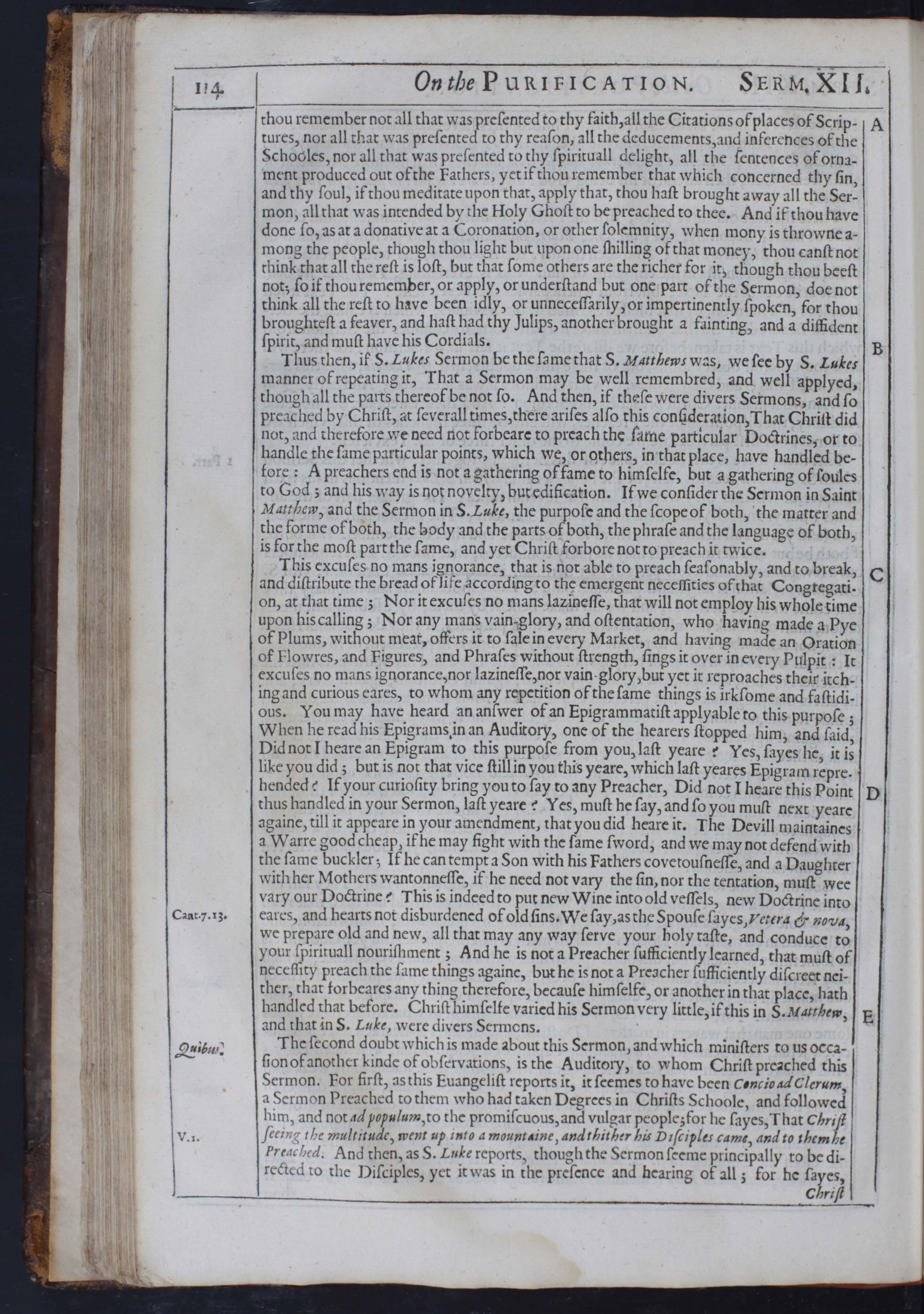 114
On the Purification.
Serm. XII.
thou remember not all that was presented to thy faith, all the Citations of places of Scrip-
114
On the Purification.
Serm. XII.
thou remember not all that was presented to thy faith, all the Citations of places of Scrip-tures, nor all that was presented to thy reason, all the deducements, and inferences of the
Schooles, nor all that was presented to thy spirituall delight, all the sentences of orna-
ment produced out of the Fathers, yet if thou remember that which concerned thy sin,
and thy soul, if thou meditate upon that, apply that, thou hast brought away all the Ser-
mon, all that was intended by the Holy Ghost to be preached to thee. And if thou have
done so, as at a donative at a Coronation, or other solemnity, when mony is throwne a-
mong the people, though thou light but upon one shilling of that money, thou canst not
think that all the rest is lost, but that some others are the richer for it, though thou beest
not; so if thou remember, or apply, or understand but one part of the Sermon, doe not
think all the rest to have been idly, or unnecessarily, or impertinently spoken, for thou
broughtest a feaver, and hast had thy Julips, another brought a fainting, and a diffident
spirit, and must have his Cordials.
Thus then, if S. Lukes Sermon be the same that S. Matthews was, we see by S. Lukes
manner of repeating it, That a Sermon may be well remembred, and well applyed,
though all the parts thereof be not so. And then, if these were divers Sermons, and so
preached by Christ, at severall times, there arises also this consideration, That Christ did
not, and therefore we need not forbeare to preach the same particular Doctrines, or to
handle the same particular points, which we, or others, in that place, have handled be-
fore: A preachers end is not a gathering of fame to himselfe, but a gathering of soules
to God; and his way is not novelty, but edification. If we consider the Sermon in Saint
Matthew, and the Sermon in S. Luke, the purpose and the scope of both, the matter and
the forme of both, the body and the parts of both, the phrase and the language of both,
is for the most part the same, and yet Christ forbore not to preach it twice.
This excuses no mans ignorance, that is not able to preach seasonably, and to break,
and distribute the bread of life according to the emergent necessities of that Congregati-
on, at that time; Nor it excuses no mans lazinesse, that will not employ his whole time
upon his calling; Nor any mans vain-glory, and ostentation, who having made a Pye
of Plums, without meat, offers it to sale in every Market, and having made an Oration
of Flowres, and Figures, and Phrases without strength, sings it over in every Pulpit: It
excuses no mans ignorance, nor lazinesse, nor vain-glory, but yet it reproaches their itch-
ing and curious eares, to whom any repetition of the same things is irksome and fastidi-
ous. You may have heard an answer of an Epigrammatist applyable to this purpose;
When he read his Epigrams in an Auditory, one of the hearers stopped him, and said,
Did not I heare an Epigram to this purpose from you, last yeare? Yes, sayes he, it is
like you did; but is not that vice still in you this yeare, which last yeares Epigram repre-
hended? If your curiosity bring you to say to any Preacher, Did not I heare this Point
thus handled in your Sermon, last yeare? Yes, must he say, and so you must next yeare
againe, till it appeare in your amendment, that you did heare it. The Devill maintaines
a Warre good cheap, if he may fight with the same sword, and we may not defend with
the same buckler; If he can tempt a Son with his Fathers covetousnesse, and a Daughter
with her Mothers wantonnesse, if he need not vary the sin, nor the tentation, must wee
vary our Doctrine? This is indeed to put new Wine into old vessels, new Doctrine into
Cant. 7.13. eares, and hearts not disburdened of old sins. We say, as the Spouse sayes, Vetera & nova,
we prepare old and new, all that may any way serve your holy taste, and conduce to
your spirituall nourishment; And he is not a Preacher sufficiently learned, that must of
necessity preach the same things againe, but he is not a Preacher sufficiently discreet nei-
ther, that forbeares any thing therefore, because himselfe, or another in that place, hath
handled that before. Christ himselfe varied his Sermon very little, if this in S. Matthew,
and that in S. Luke, were divers Sermons.
Quibus. The second doubt which is made about this Sermon, and which ministers to us occa-
sion of another kinde of observations, is the Auditory, to whom Christ preached this
Sermon. For first, as this Euangelist reports it, it seemes to have been Concio ad Clerum,
a Sermon Preached to them who had taken Degrees in Christs Schoole, and followed
him, and not ad populum, to the promiscuous, and vulgar people; for he sayes, That Christ
V. I. seeing the multitude, went up into a mountaine, and thither his Disciples came, and to them he
Preached. And then, as S. Luke reports, though the Sermon seeme principally to be di-
rected to the Disciples, yet it was in the presence and hearing of all; for he sayes, Christ
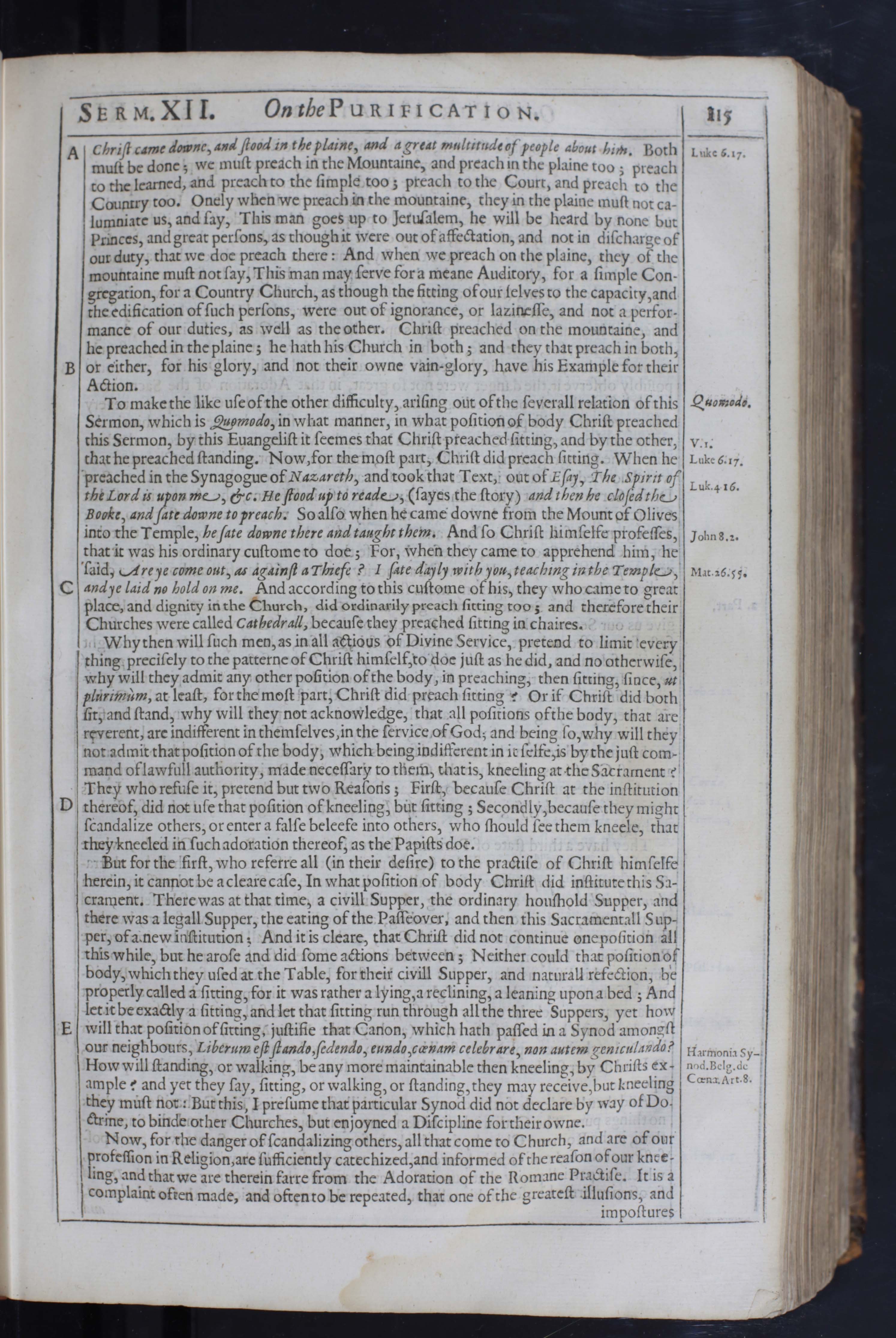 Serm. XII.
On the Purification.
115
Christ came downe, and stood in the plaine, and a great multitude of people about him. Both Luke 6.17.
Serm. XII.
On the Purification.
115
Christ came downe, and stood in the plaine, and a great multitude of people about him. Both Luke 6.17.
must be done; we must preach in the Mountaine, and preach in the plaine too; preach
to the learned, and preach to the simple too; preach to the Court, and preach to the
Country too. Onely when we preach in the mountaine, they in the plaine must not ca-
lumniate us, and say, This man goes up to Jerusalem, he will be heard by none but
Princes, and great persons, as though it were out of affectation, and not in discharge of
our duty, that we doe preach there: And when we preach on the plaine, they of the
mountaine must not say, This man may serve for a meane Auditory, for a simple Con-
gregation, for a Country Church, as though the sitting of our selves to the capacity, and
the edification of such persons, were out of ignorance, or lazinesse, and not a perfor-
mance of our duties, as well as the other. Christ preached on the mountaine, and
he preached in the plaine; he hath his Church in both; and they that preach in both,
or either, for his glory, and not their owne vain-glory, have his Example for their
Action. To make the like use of the other difficulty, arising out of the severall relation of this Quomodo.
Sermon, which is Quomodo, in what manner, in what position of body Christ preached
this Sermon, by this Euangelist it seemes that Christ preached sitting, and by the other, V.1.
that he preached standing. Now, for the most part, Christ did preach sitting. When he Luke 6.17.
preached in the Synagogue of Nazareth, and took that Text, out of Esay, The Spirit of
the Lord is upon me, &c. He stood up to reade, (sayes the story) and then he closed the Luk.4.16.
Booke, and sate downe to preach. So also when he came downe from the Mount of Olives
into the Temple, he sate downe there and taught them. And so Christ himselfe professes, John 8.2.
that it was his ordinary custome to doe; For, when they came to apprehend him, he
said, Are ye come out, as against a Thiefe? I sate dayly with you, teaching in the Temple, Mat. 26.55.
and ye laid no hold on me. And according to this custome of his, they who came to great
place, and dignity in the Church, did ordinarily preach sitting too; and therefore their
Churches were called Cathedrall, because they preached sitting in chaires. Why then will such men, as in all actious of Divine Service, pretend to limit every
thing precisely to the patterne of Christ himself, to doe just as he did, and no otherwise,
why will they admit any other position of the body, in preaching, then sitting, since, ut
plurimùm, at least, for the most part, Christ did preach sitting? Or if Christ did both
sit, and stand, why will they not acknowledge, that all positions of the body, that are
reverent, are indifferent in themselves, in the service of God; and being so, why will they
not admit that position of the body, which being indifferent in it selfe, is by the just com-
mand of lawfull authority, made necessary to them, that is, kneeling at the Sacrament?
They who resuse it, pretend but two Reasons; First, because Christ at the institution
thereof, did not use that position of kneeling, but sitting; Secondly, because they might
scandalize others, or enter a false beleefe into others, who should see them kneele, that
they kneeled in such adoration thereof, as the Papists doe. But for the first, who referre all (in their desire) to the practise of Christ himselfe
herein, it cannot be a cleare case, In what position of body Christ did institute this Sa-
crament. There was at that time, a civill Supper, the ordinary houshold Supper, and
there was a legall Supper, the eating of the Passeover, and then this Sacramentall Sup-
per, of a new institution; And it is cleare, that Christ did not continue one position all
this while, but he arose and did some actions between; Neither could that position of
body, which they used at the Table, for their civill Supper, and naturall refection, be
properly called a sitting, for it was rather a lying, a reclining, a leaning upon a bed; And
let it be exactly a sitting, and let that sitting run through all the three Suppers, yet how
will that position of sitting, justifie that Canon, which hath passed in a Synod amongst
out neighbours, Liberum est stando, sedendo, eundo, cœnam celebrare, non autem geniculando? Harmoma Sy-
nod. Belg. de
Cœnæ. Art. 8.
How will standing, or walking, be any more maintainable then kneeling, by Christs ex-
ample? and yet they say, sitting, or walking, or standing, they may receive, but kneeling
they must not: But this, I presume that particular Synod did not declare by way of Do-
ctrine, to binde other Churches, but enjoyned a Discipline for their owne. Now, for the danger of scandalizing others, all that come to Church, and are of our
profession in Religion, are sufficiently catechized, and informed of the reason of our knee-
ling, and that we are therein farre from the Adoration of the Romane Practise. It is a
complaint often made, and often to be repeated, that one of the greatest illusions, and impostures
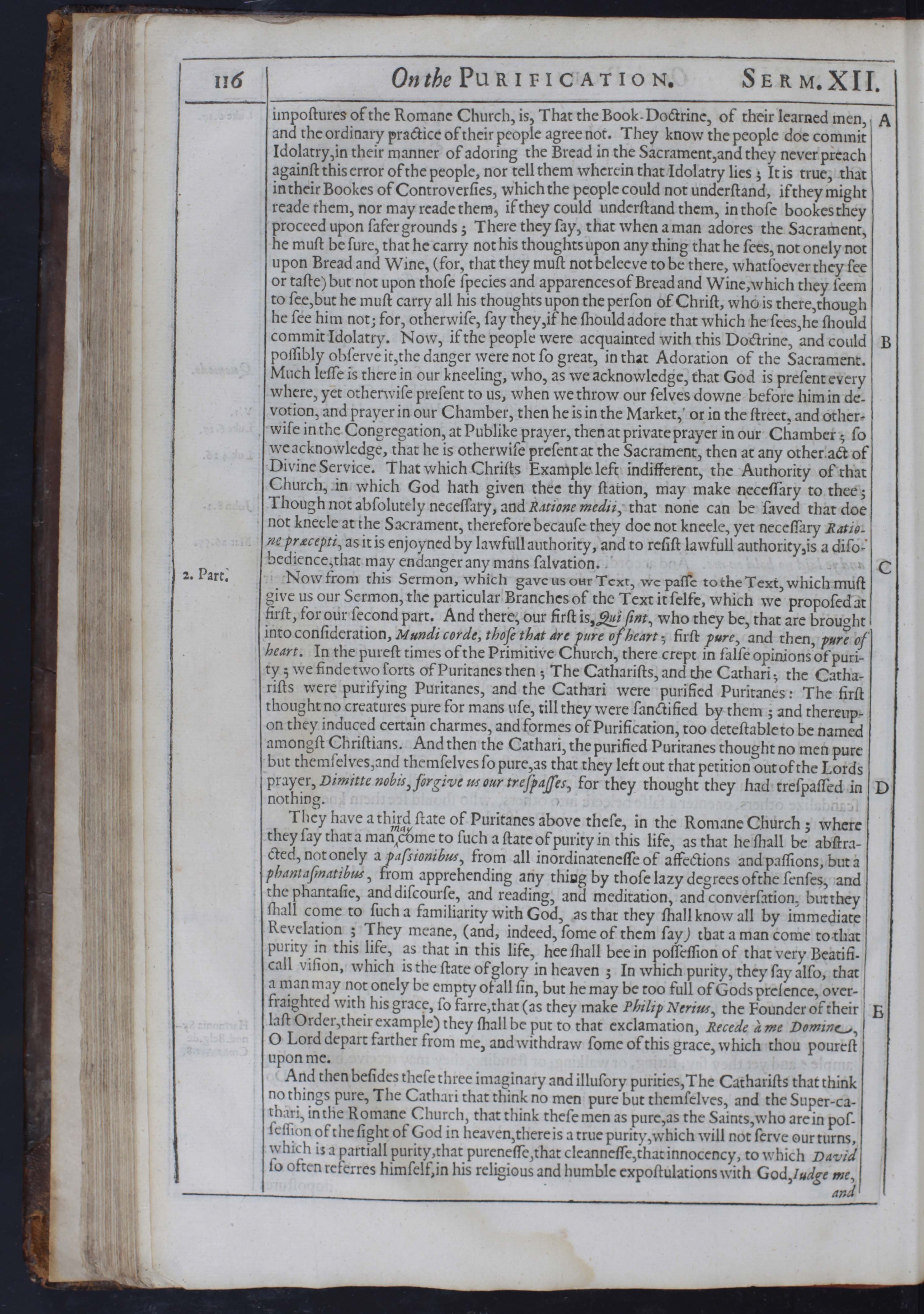 116
On the Purification.
Serm. XII.
impostures of the Romane Church, is, That the Book-Doctrine, of their learned men,
116
On the Purification.
Serm. XII.
impostures of the Romane Church, is, That the Book-Doctrine, of their learned men,
and the ordinary practice of their people agree not. They know the people doe commit
Idolatry, in their manner of adoring the Bread in the Sacrament, and they never preach
against this error of the people, nor tell them wherein that Idolatry lies; It is true, that
in their Bookes of Controversies, which the people could not understand, if they might
reade them, nor may reade them, if they could understand them, in those bookes they
proceed upon safer grounds; There they say, that when a man adores the Sacrament,
he must be sure, that he carry not his thoughts upon any thing that he sees, not onely not
upon Bread and Wine, (for, that they must not beleeve to be there, whatsoever they see
or taste) but not upon those species and apparences of Bread and Wine, which they seem
to see, but he must carry all his thoughts upon the person of Christ, who is there, though
he see him not; for, otherwise, say they, if he should adore that which he sees, he should
commit Idolatry. Now, if the people were acquainted with this Doctrine, and could
possibly observe it, the danger were not so great, in that Adoration of the Sacrament.
Much lesse is there in our kneeling, who, as we acknowledge, that God is present every
where, yet otherwise present to us, when we throw our selves downe before him in de-
votion, and prayer in our Chamber, then he is in the Market, or in the street, and other-
wise in the Congregation, at Publike prayer, then at private prayer in our Chamber; so
we acknowledge, that he is otherwise present at the Sacrament, then at any other act of
Divine Service. That which Christs Example left indifferent, the Authority of that
Church, in which God hath given thee thy station, may make necessary to thee;
Though not absolutely necessary, and Ratione medii, that none can be saved that doe
not kneele at the Sacrament, therefore because they doe not kneele, yet necessary Ratio-
ne præcepti, as it is enjoyned by lawfull authority, and to resist lawfull authority, is a diso-
bedience, that may endanger any mans salvation.
2. Part. Now from this Sermon, which gave us our Text, we passe to the Text, which must
give us our Sermon, the particular Branches of the Text it selfe, which we proposed at
first, for our second part. And there, our first is, Qui sint, who they be, that are brought
into consideration, Mundi corde, those that are pure of heart; first pure, and then, pure of
heart. In the purest times of the Primitive Church, there crept in false opinions of puri-
ty; we finde two sorts of Puritanes then; The Catharists, and the Cathari; the Catha-
rists were purifying Puritanes, and the Cathari were purified Puritanes: The first
thought no creatures pure for mans use, till they were sanctified by them; and thereup-
on they induced certain charmes, and formes of Purification, too detestable to be named
amongst Christians. And then the Cathari, the purified Puritanes thought no men pure
but themselves, and themselves so pure, as that they left out that petition out of the Lords
prayer, Dimitte nobis, forgive us our trespasses, for they thought they had trespassed in
nothing. They have a third state of Puritanes above these, in the Romane Church; where
they say that a man comemay come to such a state of purity in this life, as that he shall be abstra-
cted, not onely a passionibus, from all inordinatenesse of affections and passions, but a
phantasmatibus, from apprehending any thing by those lazy degrees of the senses, and
the phantasie, and discourse, and reading, and meditation, and conversation, but they
shall come to such a familiarity with God, as that they shall know all by immediate
Revelation; They meane, (and, indeed, some of them say) that a man come to that
purity in this life, as that in this life, hee shall bee in possession of that very Beatifi-
call vision, which is the state of glory in heaven; In which purity, they say also, that
a man may not onely be empty of all sin, but he may be too full of Gods presence, over-
fraighted with his grace, so farre, that (as they make Philip Nerius, the Founder of their
last Order, their example) they shall be put to that exclamation, Recede à me Domine,
O Lord depart farther from me, and withdraw some of this grace, which thou pourest
upon me. And then besides these three imaginary and illusory purities, The Catharists that think
no things pure, The Cathari that think no men pure but themselves, and the Super-ca-
thari, in the Romane Church, that think these men as pure, as the Saints, who are in pos-
session of the sight of God in heaven, there is a true purity, which will not serve our turns,
which is a partiall purity, that purenesse, that cleannesse, that innocency, to which David
so often referres himself, in his religious and humble expostulations with God, Iudge me, and
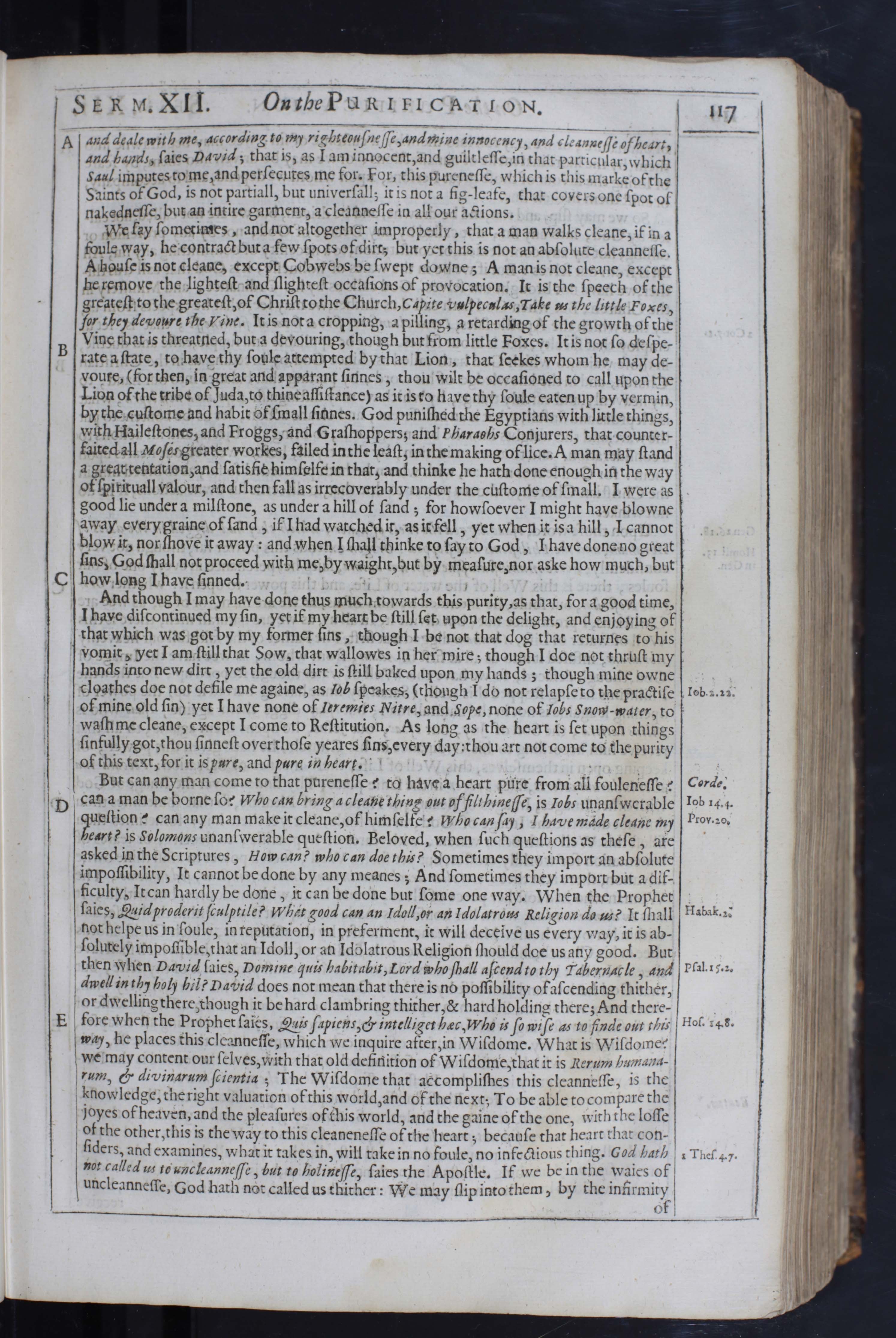 Serm. XII.
On the Purification.
117
and deale with me, according to my righteousnesse, and mine innocency, and cleannesse of heart,
Serm. XII.
On the Purification.
117
and deale with me, according to my righteousnesse, and mine innocency, and cleannesse of heart,
and hands, saies David; that is, as I am innocent, and guiltlesse, in that particular, which
Saul imputes to me, and persecutes me for. For, this purenesse, which is this marke of the
Saints of God, is not partiall, but universall; it is not a fig-leafe, that covers one spot of
nakednesse, but an intire garment, a cleannesse in all our actions. We say sometimes, and not altogether improperly, that a man walks cleane, if in a
foule way, he contract but a few spots of dirt; but yet this is not an absolute cleannesse.
A house is not cleane, except Cobwebs be swept downe; A man is not cleane, except
he remove the lightest and slightest occasions of provocation. It is the speech of the
greatest to the greatest, of Christ to the Church, Capite vulpeculas, Take us the little Foxes,
for they devoure the Vine. It is not a cropping, a pilling, a retarding of the growth of the
Vine that is threatned, but a devouring, though but from little Foxes. It is not so despe-
rate a state, to have thy soule attempted by that Lion, that seekes whom he may de-
voure, (for then, in great and apparant sinnes, thou wilt be occasioned to call upon the
Lion of the tribe of Juda, to thine assistance) as it is to have thy soule eaten up by vermin,
by the custome and habit of small sinnes. God punished the Egyptians with little things,
with Hailestones, and Froggs, and Grashoppers; and Pharaohs Conjurers, that counter-
faited all Moses greater workes, failed in the least, in the making of lice. A man may stand
a great tentation, and satisfie himselfe in that, and thinke he hath done enough in the way
of spirituall valour, and then fall as irrecoverably under the custome of small. I were as
good lie under a milstone, as under a hill of sand; for howsoever I might have blowne
away every graine of sand, if I had watched it, as it fell, yet when it is a hill, I cannot
blow it, nor shove it away: and when I shall thinke to say to God, I have done no great
sins, God shall not proceed with me, by waight, but by measure, nor aske how much, but
how long I have sinned. And though I may have done thus much towards this purity, as that, for a good time,
I have discontinued my sin, yet if my heart be still set upon the delight, and enjoying of
that which was got by my former sins, though I be not that dog that returnes to his
vomit, yet I am still that Sow, that wallowes in her mire; though I doe not thrust my
hands into new dirt, yet the old dirt is still baked upon my hands; though mine owne
cloathes doe not defile me againe, as Iob speakes, (though I do not relapse to the practise Iob. 2.22.
of mine old sin) yet I have none of Ieremies Nitre, and Sope, none of Iobs Snow-water, to
wash me cleane, except I come to Restitution. As long as the heart is set upon things
sinfully got, thou sinnest over those yeares sins, every day: thou art not come to the purity
of this text, for it is pure, and pure in heart. But can any man come to that purenesse? to have a heart pure from all foulenesse? Corde.
can a man be borne so? Who can bring a cleane thing out of filthinesse, is Iobs unanswerable Iob 14.4.
question? can any man make it cleane, of himselfe? Who can say, I have made cleane my Prov. 20.
heart? is Solomons unanswerable question. Beloved, when such questions as these, are
asked in the Scriptures, How can? who can doe this? Sometimes they import an absolute
impossibility, It cannot be done by any meanes; And sometimes they import but a dif-
ficulty, It can hardly be done, it can be done but some one way. When the Prophet
saies, Quid proderit sculptile? What good can an Idoll, or an Idolatrous Religion do us? It shall Habak. 2.
not helpe us in soule, in reputation, in preferment, it will deceive us every way, it is ab-
solutely impossible, that an Idoll, or an Idolatrous Religion should doe us any good. But
then when David saies, Domine quis habitabit, Lord who shall ascend to thy Tabernacle, andPsal. 15.2.
dwell in thy holy hil? David does not mean that there is no possibility of ascending thither,
or dwelling there, though it be hard clambring thither, & hard holding there; And there-
fore when the Prophet saies, Quis sapiens, & intelliget hæc, Who is so wise as to finde out thisHos. 14.8.
way, he places this cleannesse, which we inquire after, in Wisdome. What is Wisdome?
we may content our selves, with that old definition of Wisdome, that it is Rerum humana-
rum, & divinarum scientia; The Wisdome that accomplishes this cleannesse, is the
knowledge, the right valuation of this world, and of the next; To be able to compare the
joyes of heaven, and the pleasures of this world, and the gaine of the one, with the losse
of the other, this is the way to this cleanenesse of the heart; because that heart that con-
siders, and examines, what it takes in, will take in no foule, no infectious thing. God hath 1 Thes. 4.7.
not called us to uncleannesse, but to holinesse, saies the Apostle. If we be in the waies of
uncleannesse, God hath not called us thither: We may slip into them, by the infirmity of
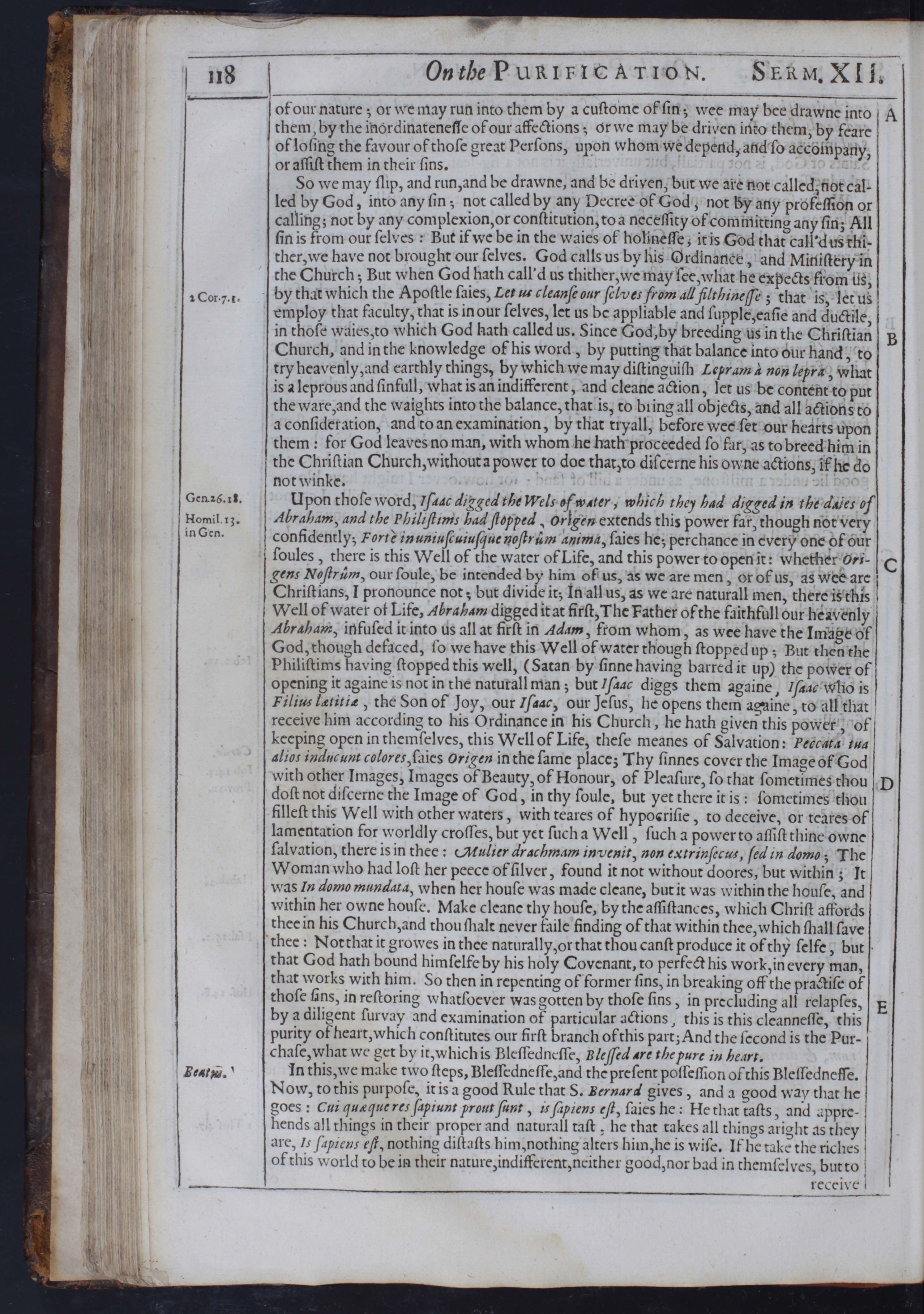 118
On the Purification.
Serm. XII.
of our nature; or we may run into them by a custome of sin; wee may bee drawne into
118
On the Purification.
Serm. XII.
of our nature; or we may run into them by a custome of sin; wee may bee drawne into
them, by the inordinatenesse of our affections; or we may be driven into them, by feare
of losing the favour of those great Persons, upon whom we depend, and so accompany,
or assist them in their sins. So we may slip, and run, and be drawne, and be driven, but we are not called, not cal-
led by God, into any sin; not called by any Decree of God; not by any profession or
calling; not by any complexion, or constitution, to a necessity of committing any sin; All
sin is from our selves: But if we be in the waies of holinesse, it is God that call'd us thi-
ther, we have not brought our selves. God calls us by his Ordinance, and Ministery in
the Church; But when God hath call'd us thither, we may see, what he expects from us,
2 Cor. 7.1. by that which the Apostle saies, Let us cleanse our selves from all filthinesse; that is, let us
employ that faculty, that is in our selves, let us be appliable and supple, easie and ductile,
in those waies, to which God hath called us. Since God, by breeding us in the Christian
Church, and in the knowledge of his word, by putting that balance into our hand, to
try heavenly, and earthly things, by which we may distinguish Lepram à non lepra, what
is a leprous and sinfull, what is an indifferent, and cleane action, let us be content to put
the ware, and the waights into the balance, that is, to bring all objects, and all actions to
a consideration, and to an examination, by that tryall, before wee set our hearts upon
them: for God leaves no man, with whom he hath proceeded so far, as to breed him in
the Christian Church, without a power to doe that, to discerne his owne actions, if he do
not winke. Gen. 26.18. Upon those word, Isaac digged the Wels of water, which they had digged in the daies of
Homil. 13.
in Gen. Abraham, and the Philistims had stopped, Origen extends this power far, though not very
confidently; Fortè in uniuscuiusque nostrûm anima, saies he; perchance in every one of our
soules, there is this Well of the water of Life, and this power to open it: whether Ori-
gens Nostrûm, our soule, be intended by him of us, as we are men, or of us, as wee are
Christians, I pronounce not; but divide it; In all us, as we are naturall men, there is this
Well of water of Life, Abraham digged it at first, The Father of the faithfull our heavenly
Abraham, infused it into us all at first in Adam, from whom, as wee have the Image of
God, though defaced, so we have this Well of water though stopped up; But then the
Philistims having stopped this well, (Satan by sinne having barred it up) the power of
opening it againe is not in the naturall man; but Isaac diggs them againe, Isaac who is
Filius lætitiæ, the Son of Joy, our Isaac, our Jesus, he opens them againe, to all that
receive him according to his Ordinance in his Church, he hath given this power, of
keeping open in themselves, this Well of Life, these meanes of Salvation: Peccata tua
alios inducunt colores, saies Origen in the same place; Thy sinnes cover the Image of God
with other Images, Images of Beauty, of Honour, of Pleasure, so that sometimes thou
dost not discerne the Image of God, in thy soule, but yet there it is: sometimes thou
fillest this Well with other waters, with teares of hypocrisie, to deceive, or teares of
lamentation for worldly crosses, but yet such a Well, such a power to assist thine owne
salvation, there is in thee: Mulier drachmam invenit, non extrinsecus, sed in domo; The
Woman who had lost her peece of silver, found it not without doores, but within; It
was In domo mundata, when her house was made cleane, but it was within the house, and
within her owne house. Make cleane thy house, by the assistances, which Christ affords
thee in his Church, and thou shalt never faile finding of that within thee, which shall save
thee: Not that it growes in thee naturally, or that thou canst produce it of thy selfe, but
that God hath bound himselfe by his holy Covenant, to perfect his work, in every man,
that works with him. So then in repenting of former sins, in breaking off the practise of
those sins, in restoring whatsoever was gotten by those sins, in precluding all relapses,
by a diligent survay and examination of particular actions, this is this cleannesse, this
purity of heart, which constitutes our first branch of this part; And the second is the Pur-
chase, what we get by it, which is Blessednesse, Blessed are the pure in heart. Beatus. In this, we make two steps, Blessednesse, and the present possession of this Blessednesse.
Now, to this purpose, it is a good Rule that S. Bernard gives, and a good way that he
goes: Cui quæque res sapiunt prout sunt, is sapiens est, saies he: He that tasts, and appre-
hends all things in their proper and naturall tast, he that takes all things aright as they
are, Is sapiens est, nothing distasts him, nothing alters him, he is wise. If he take the riches
of this world to be in their nature, indifferent, neither good, nor bad in themselves, but to receive
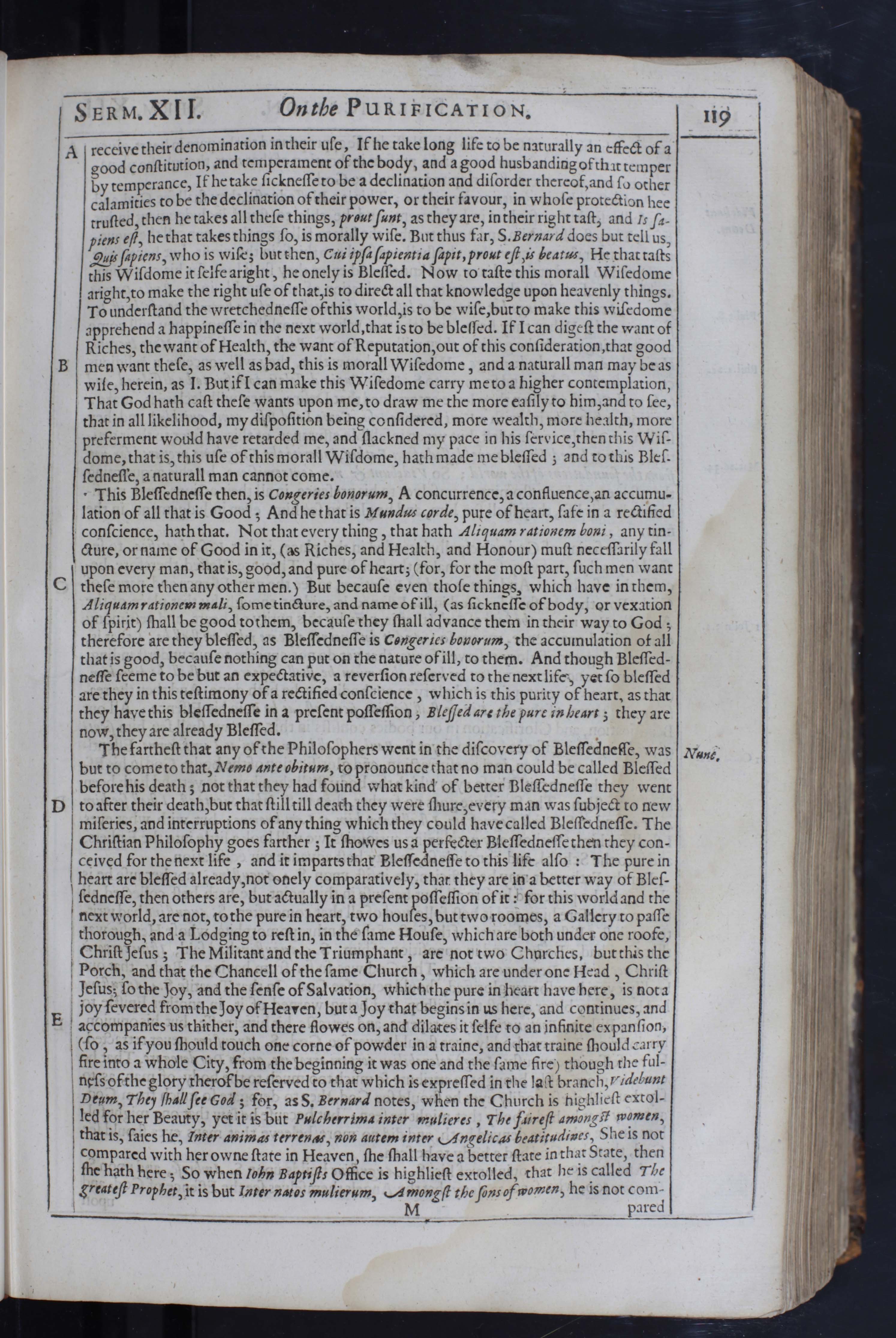 Serm. XII.
On the Purification.
119
receive their denomination in their use, If he take long life to be naturally an effect of a
Serm. XII.
On the Purification.
119
receive their denomination in their use, If he take long life to be naturally an effect of a
good constitution, and temperament of the body, and a good husbanding of that temper
by temperance, If he take sicknesse to be a declination and disorder thereof, and so other
calamities to be the declination of their power, or their favour, in whose protection hee
trusted, then he takes all these things, prout sunt, as they are, in their right tast, and Is sa-
piens est, he that takes things so, is morally wise. But thus far, S. Bernard does but tell us,
Quis sapiens, who is wise; but then, Cui ipsa sapientia sapit, prout est, is beatus, He that tasts
this Wisdome it selfe aright, he onely is Blessed. Now to taste this morall Wisedome
aright, to make the right use of that, is to direct all that knowledge upon heavenly things.
To understand the wretchednesse of this world, is to be wise, but to make this wisedome
apprehend a happinesse in the next world, that is to be blessed. If I can digest the want of
Riches, the want of Health, the want of Reputation, out of this consideration, that good
men want these, as well as bad, this is morall Wisedome, and a naturall man may be as
wise, herein, as I. But if I can make this Wisedome carry me to a higher contemplation,
That God hath cast these wants upon me, to draw me the more easily to him, and to see,
that in all likelihood, my disposition being considered, more wealth, more health, more
preferment would have retarded me, and slackned my pace in his service, then this Wis-
dome, that is, this use of this morall Wisdome, hath made me blessed; and to this Bles-
sednesse, a naturall man cannot come. This Blessednesse then, is Congeries bonorum, A concurrence, a confluence, an accumu-
lation of all that is Good; And he that is Mundus corde, pure of heart, safe in a rectified
conscience, hath that. Not that every thing, that hath Aliquam rationem boni, any tin-
cture, or name of Good in it, (as Riches, and Health, and Honour) must necessarily fall
upon every man, that is, good, and pure of heart; (for, for the most part, such men want
these more then any other men.) But because even those things, which have in them,
Aliquam rationem mali, some tincture, and name of ill, (as sicknesse of body, or vexation
of spirit) shall be good to them, because they shall advance them in their way to God;
therefore are they blessed, as Blessednesse is Congeries bonorum, the accumulation of all
that is good, because nothing can put on the nature of ill, to them. And though Blessed-
nesse seeme to be but an expectative, a reversion reserved to the next life, yet so blessed
are they in this testimony of a rectified conscience, which is this purity of heart, as that
they have this blessednesse in a present possession, Blessed are the pure in heart; they are
now, they are already Blessed. The farthest that any of the Philosophers went in the discovery of Blessednesse, wasNunc.
but to come to that, Nemo ante obitum, to pronounce that no man could be called Blessed
before his death; not that they had found what kind of better Blessednesse they went
to after their death, but that still till death they were shure, every man was subject to new
miseries, and interruptions of any thing which they could have called Blessednesse. The
Christian Philosophy goes farther; It showes us a perfecter Blessednesse then they con-
ceived for the next life, and it imparts that Blessednesse to this life also: The pure in
heart are blessed already, not onely comparatively, that they are in a better way of Bles-
sednesse, then others are, but actually in a present possession of it: for this world and the
next world, are not, to the pure in heart, two houses, but two roomes, a Gallery to passe
thorough, and a Lodging to rest in, in the same House, which are both under one roofe,
Christ Jesus; The Militant and the Triumphant, are not two Churches, but this the
Porch, and that the Chancell of the same Church, which are under one Head, Christ
Jesus; so the Joy, and the sense of Salvation, which the pure in heart have here, is not a
joy severed from the Joy of Heaven, but a Joy that begins in us here, and continues, and
accompanies us thither, and there flowes on, and dilates it selfe to an infinite expansion,
(so, as if you should touch one corne of powder in a traine, and that traine should carry
fire into a whole City, from the beginning it was one and the same fire) though the ful-
ness of the glory therof be reserved to that which is expressed in the last branch, Videbunt
Deum, They shall see God; for, as S. Bernard notes, when the Church is highliest extol-
led for her Beauty, yet it is but Pulcherrima inter mulieres, The fairest amongst women,
that is, saies he, Inter animas terrenas, non autem inter Angelicas beatitudines, She is not
compared with her owne state in Heaven, she shall have a better state in that State, then
she hath here; So when Iohn Baptists Office is highliest extolled, that he is called The
greatest Prophet, it is but Inter natos mulierum, Amongst the sons of women, he is not com-
M pared
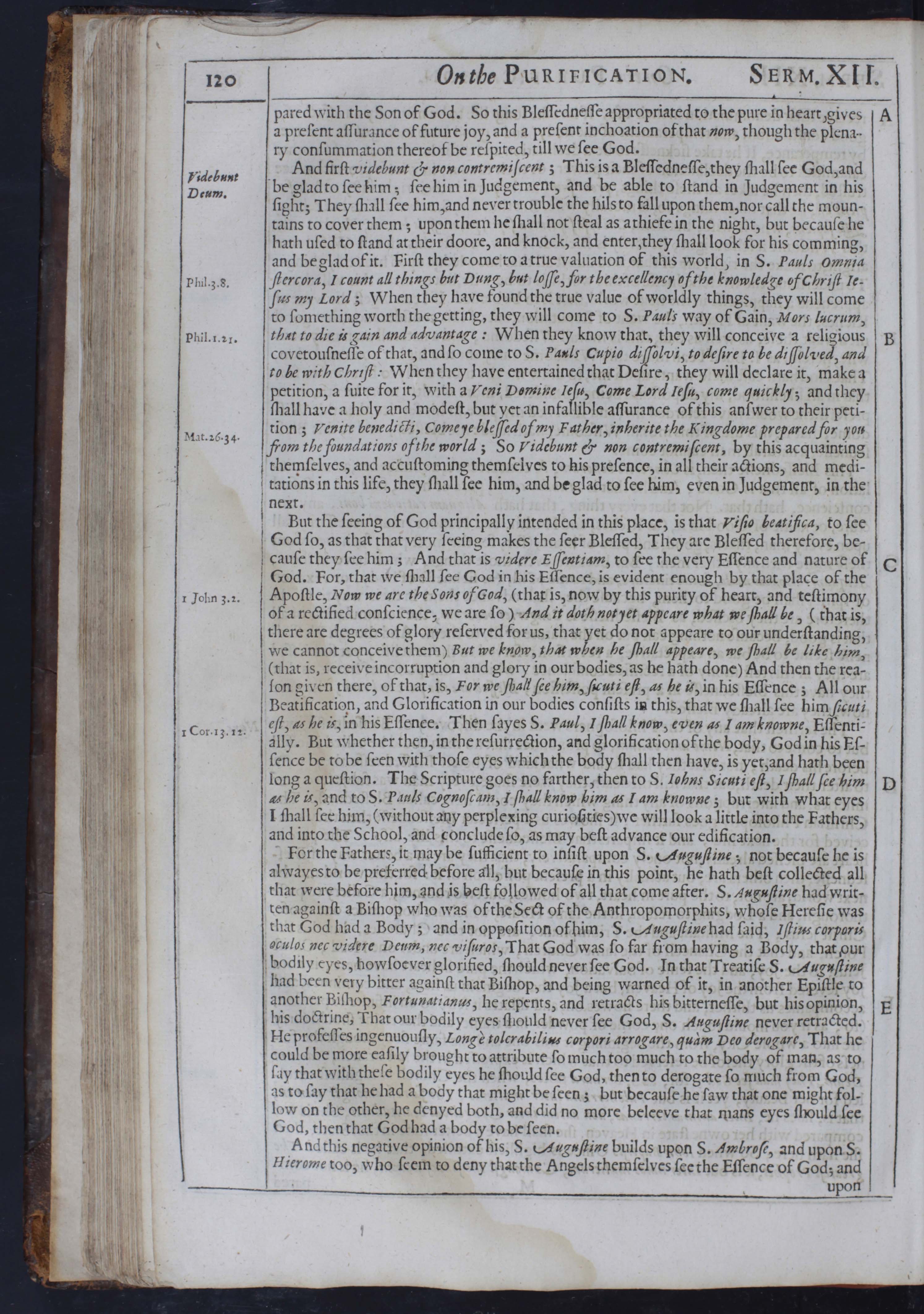 120
On the Purification.
Serm. XII.
pared with the Son of God. So this Blessednesse appropriated to the pure in heart, gives
120
On the Purification.
Serm. XII.
pared with the Son of God. So this Blessednesse appropriated to the pure in heart, gives
a present assurance of future joy, and a present inchoation of that now, though the plena-
ry consummation thereof be respited, till we see God. And first videbunt & non contremiscent; This is a Blessednesse, they shall see God, and Videbunt
Deum.
be glad to see him; see him in Judgement, and be able to stand in Judgement in his
sight; They shall see him, and never trouble the hils to fall upon them, nor call the moun-
tains to cover them; upon them he shall not steal as a thiefe in the night, but because he
hath used to stand at their doore, and knock, and enter, they shall look for his comming,
and be glad of it. First they come to a true valuation of this world, in S. Pauls Omnia
Phil. 3.8. stercora, I count all things but Dung, but losse, for the excellency of the knowledge of Christ Ie-
sus my Lord; When they have found the true value of worldly things, they will come
to something worth the getting, they will come to S. Pauls way of Gain, Mors lucrum,
Phil. 1.21. that to die is gain and advantage: When they know that, they will conceive a religious
covetousnesse of that, and so come to S. Pauls Cupio dissolvi, to desire to be dissolved, and
to be with Christ: When they have entertained that Desire, they will declare it, make a
petition, a suite for it, with a Veni Domine Iesu, Come Lord Iesu, come quickly; and they
shall have a holy and modest, but yet an infallible assurance of this answer to their peti-
tion; Venite benedicti, Come ye blessed of my Father, inherite the Kingdome prepared for you
Mat. 26.34. from the foundations of the world; So Videbunt & non contremiscent, by this acquainting
themselves, and accustoming themselves to his presence, in all their actions, and medi-
tations in this life, they shall see him, and be glad to see him, even in Judgement, in the
next. But the seeing of God principally intended in this place, is that Visio beatifica, to see
God so, as that that very seeing makes the seer Blessed, They are Blessed therefore, be-
cause they see him; And that is videre Essentiam, to see the very Essence and nature of
God. For, that we shall see God in his Essence, is evident enough by that place of the
1 John 3.2. Apostle, Now we are the Sons of God, (that is, now by this purity of heart, and testimony
of a rectified conscience, we are so) And it doth not yet appeare what we shall be, (that is,
there are degrees of glory reserved for us, that yet do not appeare to our understanding,
we cannot conceive them) But we know, that when he shall appeare, we shall be like him,
(that is, receive incorruption and glory in our bodies, as he hath done) And then the rea-
son given there, of that, is, For we shall see him, sicuti est, as he is, in his Essence; All our
Beatification, and Glorification in our bodies consists in this, that we shall see him sicuti
1 Cor. 13.12. est, as he is, in his Essence. Then sayes S. Paul, I shall know, even as I am knowne, Essenti-
ally. But whether then, in the resurrection, and glorification of the body, God in his Es-
sence be to be seen with those eyes which the body shall then have, is yet, and hath been
long a question. The Scripture goes no farther, then to S. Iohns Sicuti est, I shall see him
as he is, and to S. Pauls Cognoscam, I shall know him as I am knowne; but with what eyes
I shall see him, (without any perplexing curiosities) we will look a little into the Fathers,
and into the School, and conclude so, as may best advance our edification. For the Fathers, it may be sufficient to insist upon S. Augustine; not because he is
alwayes to be preferred before all, but because in this point, he hath best collected all
that were before him, and is best followed of all that come after. S. Augustine had writ-
ten against a Bishop who was of the Sect of the Anthropomorphits, whose Heresie was
that God had a Body; and in opposition of him, S. Augustine had said, Istius corporis
oculos nec videre Deum, nec visuros, That God was so far from having a Body, that our
bodily eyes, howsoever glorified, should never see God. In that Treatise S. Augustine
had been very bitter against that Bishop, and being warned of it, in another Epistle to
another Bishop, Fortunatianus, he repents, and retracts his bitternesse, but his opinion,
his doctrine, That our bodily eyes should never see God, S. Augustine never retracted.
He professes ingenuously, Longè tolerabilius corpori arrogare, quàm Deo derogare, That he
could be more easily brought to attribute so much too much to the body of man, as to
say that with these bodily eyes he should see God, then to derogate so much from God,
as to say that he had a body that might be seen; but because he saw that one might fol-
low on the other, he denyed both, and did no more beleeve that mans eyes should see
God, then that God had a body to be seen. And this negative opinion of his, S. Augustine builds upon S. Ambrose, and upon S.
Hierome too, who seem to deny that the Angels themselves see the Essence of God; and upon
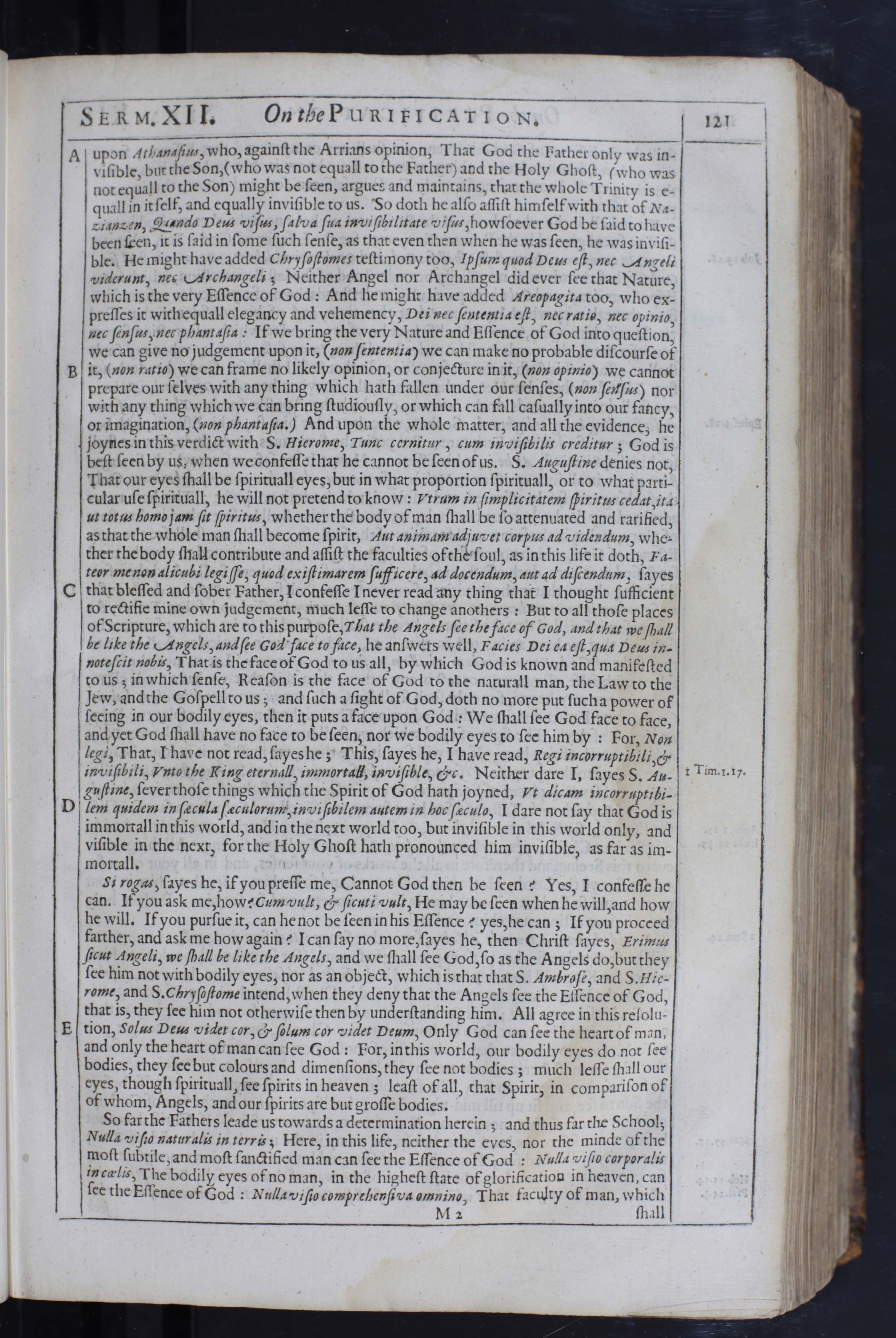 Serm. XII.
On the Purification.
121
upon Athanasius, who, against the Arrians opinion, That God the Father only was in-
Serm. XII.
On the Purification.
121
upon Athanasius, who, against the Arrians opinion, That God the Father only was in-visible, but the Son, (who was not equall to the Father) and the Holy Ghost, (who was
not equall to the Son) might be seen, argues and maintains, that the whole Trinity is e-
quall in it self, and equally invisible to us. So doth he also assist himself with that of Na-
zianzen, Quando Deus visus, salva sua invisibilitate visus, howsoever God be said to have
been seen, it is said in some such sense, as that even then when he was seen, he was invisi-
ble. He might have added Chrysostomes testimony too, Ipsum quod Deus est, nec Angeli
viderunt, nec Archangeli; Neither Angel nor Archangel did ever see that Nature,
which is the very Essence of God: And he might have added Areopagita too, who ex-
presses it with equall elegancy and vehemency, Dei nec sententia est, nec ratio, nec opinio,
nec sensus, nec phantasia: If we bring the very Nature and Essence of God into question,
we can give no judgement upon it, (non sententia) we can make no probable discourse of
it, (non ratio) we can frame no likely opinion, or conjecture in it, (non opinio) we cannot
prepare our selves with any thing which hath fallen under our senses, (non sensus) nor
with any thing which we can bring studiously, or which can fall casually into our fancy,
or imagination, (non phantasia.) And upon the whole matter, and all the evidence, he
joynes in this verdict with S. Hierome, Tunc cernitur, cum invisibilis creditur; God is
best seen by us, when we confesse that he cannot be seen of us. S. Augustine denies not,
That our eyes shall be spirituall eyes, but in what proportion spirituall, or to what parti-
cular use spirituall, he will not pretend to know: Vtrum in simplicitatem spiritus cedat, it a
ut totus homo jam sit spiritus, whether the body of man shall be so attenuated and rarified,
as that the whole man shall become spirit, Aut animam adjuvet corpus ad videndum, whe-
ther the body shall contribute and assist the faculties of the soul, as in this life it doth, Fa-
teor me non alicubi legisse, quod existimarem sufficere, ad docendum, aut ad discendum, sayes
that blessed and sober Father, I confesse I never read any thing that I thought sufficient
to rectifie mine own judgement, much lesse to change anothers: But to all those places
of Scripture, which are to this purpose, That the Angels see the face of God, and that we shall
be like the Angels, and see God face to face, he answers well, Facies Dei ea est, qua Deus in-
notescit nobis, That is the face of God to us all, by which God is known and manifested
to us; in which sense, Reason is the face of God to the naturall man, the Law to the
Jew, and the Gospell to us; and such a sight of God, doth no more put such a power of
seeing in our bodily eyes, then it puts a face upon God: We shall see God face to face,
and yet God shall have no face to be seen, nor we bodily eyes to see him by: For, Non
legi, That, I have not read, sayes he; This, sayes he, I have read, Regi incorruptibili, &
invisibili, Vnto the King eternall, immortall, invisible, &c. Neither dare I, sayes S. 1 Tim.1.17. Au-
gustine, sever those things which the Spirit of God hath joyned, Vt dicam incorruptibi-
lem quidem in sæcula sæculorum, invisibilem autem in hoc sæculo, I dare not say that God is
immortall in this world, and in the next world too, but invisible in this world only, and
visible in the next, for the Holy Ghost hath pronounced him invisible, as far as im-
mortall. Si rogas, sayes he, if you presse me, Cannot God then be seen? Yes, I confesse he
can. If you ask me, how? Cum vult, & sicuti vult, He may be seen when he will, and how
he will. If you pursue it, can he not be seen in his Essence? yes, he can; If you proceed
farther, and ask me how again? I can say no more, sayes he, then Christ sayes, Erimus
sicut Angeli, we shall be like the Angels, and we shall see God, so as the Angels do, but they
see him not with bodily eyes, nor as an object, which is that that S. Ambrose, and S. Hic-
rome, and S. Chrysostome intend, when they deny that the Angels see the Essence of God,
that is, they see him not otherwise then by understanding him. All agree in this resolu-
tion, Solus Deus videt cor, & solum cor videt Deum, Only God can see the heart of man
and only the heart of man can see God: For, in this world, our bodily eyes do not see
bodies, they see but colours and dimensions, they see not bodies; much lesse shall our
eyes, though spirituall, see spirits in heaven; least of all, that Spirit, in comparison of
of whom, Angels, and our spirits are but grosse bodies. So far the Fathers leade us towards a determination herein; and thus far the School;
Nulla visio naturalis in terris; Here, in this life, neither the eyes, nor the minde of the
most subtile, and most sanctified man can see the Essence of God: Nulla visio corporalis
in cœlis, The bodily eyes of no man, in the highest stare of glorification in heaven, can
see the Essence of God: Nulla visio comprehensiva omnino, That faculty of man, which M2 shall
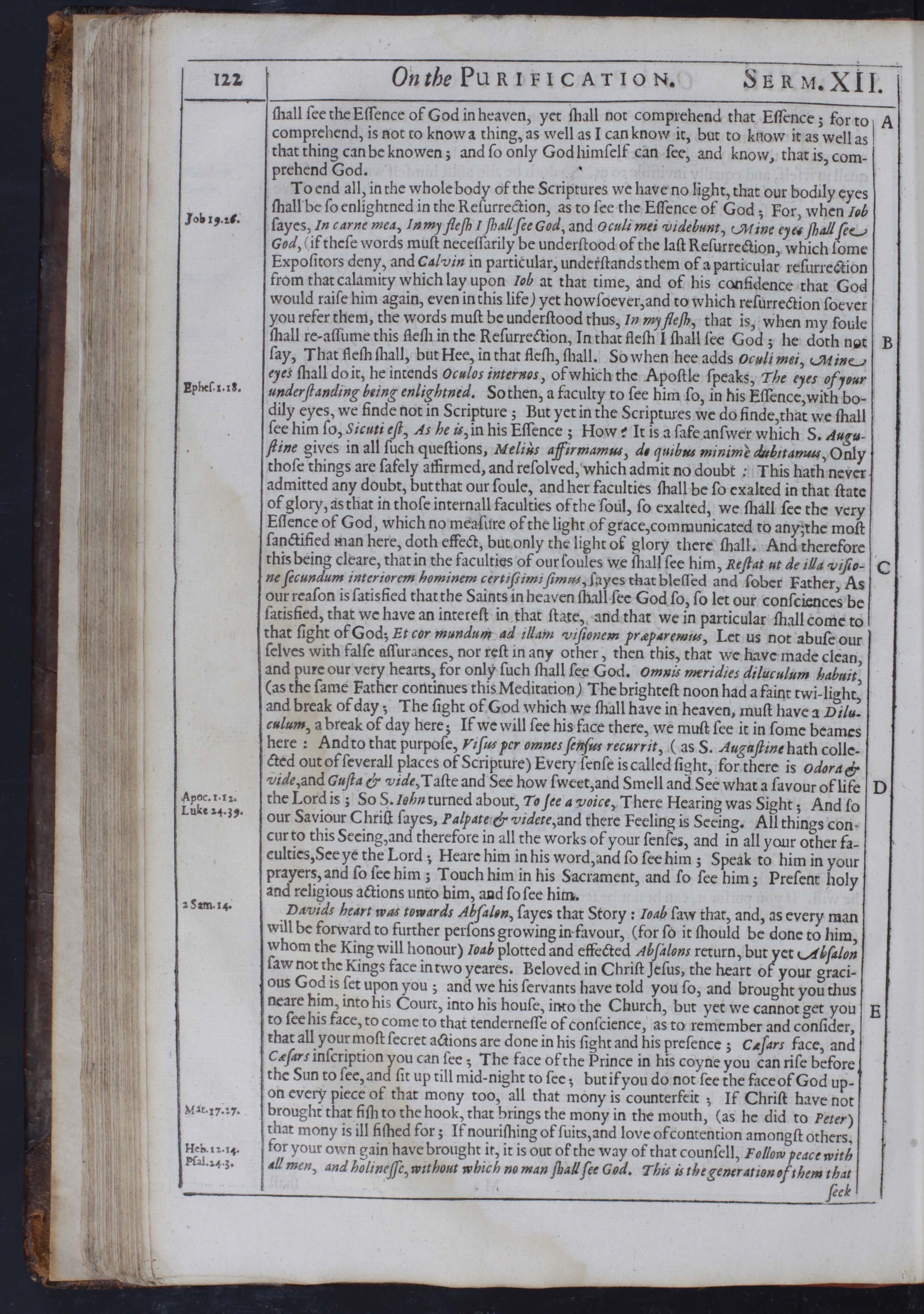 122
On the Purification.
Serm. XII.
shall see the Essence of God in heaven, yet shall not comprehend that Essence; for to
122
On the Purification.
Serm. XII.
shall see the Essence of God in heaven, yet shall not comprehend that Essence; for to
comprehend, is not to know a thing, as well as I can know it, but to know it as well as
that thing can be knowen; and so only God himself can see, and know, that is, com-
prehend God. To end all, in the whole body of the Scriptures we have no light, that our bodily eyes
shall be so enlightned in the Resurrection, as to see the Essence of God; For, when Iob
Job 19.26. sayes, In carne mea, In my flesh I shall see God, and Oculi mei videbunt, Mine eyes shall see
God, (if these words must necessarily be understood of the last Resurrection, which some
Expositors deny, and Calvin in particular, understands them of a particular resurrection
from that calamity which lay upon Iob at that time, and of his confidence that God
would raise him again, even in this life) yet howsoever, and to which resurrection soever
you refer them, the words must be understood thus, In my flesh, that is, when my soule
shall re-assume this flesh in the Resurrection, In that flesh I shall see God; he doth not
say, That flesh shall, but Hee, in that flesh, shall. So when hee adds Oculi mei, Mine
eyes shall do it, he intends Oculos internos, of which the Apostle speaks, The eyes of your
Ephes. 1.18. understanding being enlightned. So then, a faculty to see him so, in his Essence, with bo-
dily eyes, we finde not in Scripture; But yet in the Scriptures we do finde, that we shall
see him so, Sicuti est, As he is, in his Essence; How? It is a safe answer which S. Augu-
stine gives in all such questions, Meliùs affirmamus, de quibus minimè dubitamus, Only
those things are safely affirmed, and resolved, which admit no doubt: This hath never
admitted any doubt, but that our soule, and her faculties shall be so exalted in that state
of glory, as that in those internall faculties of the soul, so exalted, we shall see the very
Essence of God, which no measure of the light of grace, communicated to any, the most
fanctified man here, doth effect, but only the light of glory there shall. And therefore
this being cleare, that in the faculties of our soules we shall see him, Restat ut de illa visio-
ne secundum interiorem hominem certissimi simus, sayes that blessed and sober Father, As
our reason is satisfied that the Saints in heaven shall see God so, so let our consciences be
satisfied, that we have an interest in that state, and that we in particular shall come to
that sight of God; Et cor mundum ad illam visionem præparemus, Let us not abuse our
selves with false assurances, nor rest in any other, then this, that we have made clean,
and pure our very hearts, for only such shall see God. Omnis meridies diluculum habuit,
(as the same Father continues this Meditation) The brightest non had a faint twi-light,
and break of day; The sight of God which we shall have in heaven, must have a Dilu-
culum, a break of day here; If we will see his face there, we must see it in some beames
here: And to that purpose, Visus per omnes sensus recurrit, (as S. Augustine hath colle-
cted out of severall places of Scripture) Every sense is called sight, for there is Odora &
vide, and Gusta & vide, Taste and See how sweet, and Smell and See what a savour of life
the Lord is;Apoc. 1.12. So S. Iohn turned about, To see a voice, There Hearing was Sight; And so
Luke 24.39. our Saviour Christ sayes, Palpate & videte, and there Feeling is Seeing. All things con-
cur to this Seeing, and therefore in all the works of your senses, and in all your other fa-
culties, See ye the Lord; Heare him in his word, and so see him; Speak to him in your
prayers, and so see him; Touch him in his Sacrament, and so see him; Present holy
and religious actions unto him, and so see him. 2 Sam. 14. Davids heart was towards Absalon, sayes that Story: Ioab saw that, and, as every man
will be forward to further persons growing in favour, (for so it should be done to him,
whom the King will honour) Ioah plotted and effected Absalons return, but yet Absalon
saw not the Kings face in two yeares. Beloved in Christ Jesus, the heart of your graci-
ous God is set upon you; and we his servants have told you so, and brought you thus
neare him, into his Court, into his house, into the Church, but yet we cannot get you
to see his face, to come to that tendernesse of conscience, as to remember and consider,
that all your most secret actions are done in his sight and his presence; Cæsars face, and
Cæsars inscription you can see; The face of the Prince in his coyne you can rise before
the Sun to see, and sit up till mid-night to see; but if you do not see the face of God up-
on every piece of that mony too, all that mony is counterfeit; If Christ have not
Mat. 17.25. brought that fish to the hook, that brings the mony in the mouth, (as he did to Peter)
that mony is ill fished for; If nourishing of suits, and love of contention amongst others,
Heb. 12.14. for your own gain have brought it, it is out of the way of that counsell, Follow peace with
Psal. 14.3. all men, and holinesse, without which no man shall see God. This is the generation of them that seekseeke
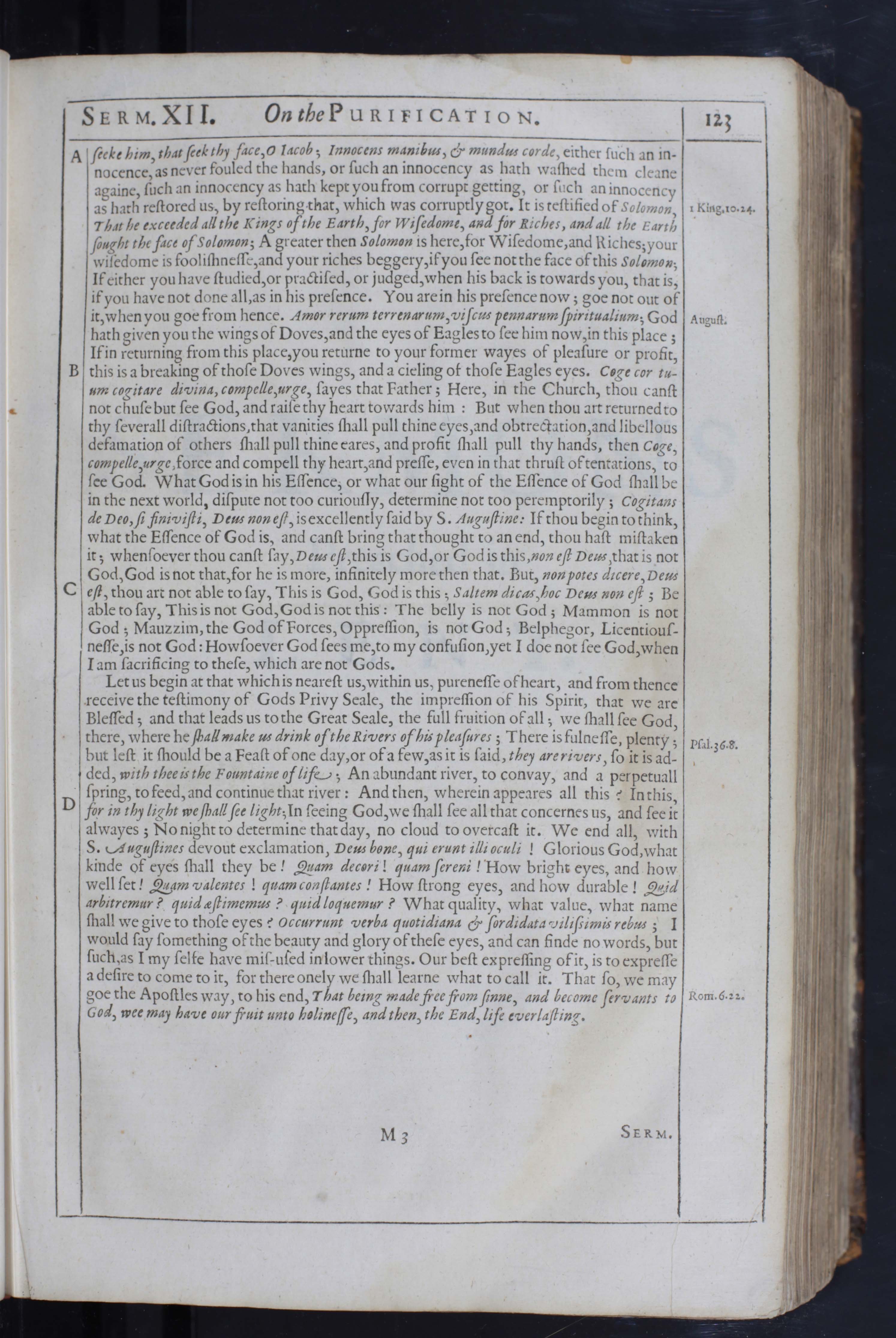 Serm. XII.
On the Purification.
123
seeke him, that seek thy face, O Iacob; Innocens manibus, & mundus corde, either such an in-
Serm. XII.
On the Purification.
123
seeke him, that seek thy face, O Iacob; Innocens manibus, & mundus corde, either such an in-nocence, as never fouled the hands, or such an innocency as hath washed them cleane
againe, such an innocency as hath kept you from corrupt getting, or such an innocency
as hath restored us, by restoring that, which was corruptly got. It is testified of Solomon, 1 King. 10.24.
That he exceeded all the Kings of the Earth, for Wisedome, and for Riches, and all the Earth
sought the face of Solomon; A greater then Solomon is here, for Wisedome, and Riches; your
wisedome is foolishnesse, and your riches beggery, if you see not the face of this Solomon;
If either you have studied, or practised, or judged, when his back is towards you, that is,
if you have not done all, as in his presence. You are in his presence now; goe not out of
it, when you goe from hence. Amor rerum terrenarum, viscus pennarum spiritualium; GodAugust.
hath given you the wings of Doves, and the eyes of Eagles to see him now, in this place;
If in returning from this place, you returne to your former wayes of pleasure or profit,
this is a breaking of those Doves wings, and a cieling of those Eagles eyes. Coge cor tu-
um cogitare divina, compelle, urge, sayes that Father; Here, in the Church, thou canst
not chuse but see God, and raise thy heart towards him: But when thou art returned to
thy severall distractions, that vanities shall pull thine eyes, and obtrectation, and libellous
defamation of others shall pull thine eares, and profit shall pull thy hands, then Coge,
compelle, urge. force and compell thy heart, and presse, even in that thrust of tentations, to
see God. What God is in his Essence, or what our sight of the Essence of God shall be
in the next world, dispute not too curiously, determine nor too peremptorily; Cogitans
de Deo, si finivisti, Deus non est, is excellently said by S. Augustine: If thou begin to think,
what the Essence of God is, and canst bring that thought to an end, thou hast mistaken
it; whensoever thou canst say, Deus est, this is God, or God is this, non est Deus, that is not
God, God is not that, for he is more, infinitely more then that. But, non potes dicere, Deus
est, thou art not able to say, This is God, God is this; Saltem dicas, hoc Deus non est; Be
able to say, This is not God, God is not this: The belly is not God; Mammon is not
God; Mauzzim, the God of Forces, Oppression, is not God; Belphegor, Licentious-
nesse, is not God: Howsoever God sees me, to my confusion, yet I doe not see God, when
I am sacrificing to these, which are not Gods.
Let us begin at that which is nearest us, within us, purenesse of heart, and from thence
receive the testimony of Gods Privy Seale, the impression of his Spirit, that we are
Blessed; and that leads us to the Great Seale, the full fruition of all; we shall see God,
there, where he shall make us drink of the Rivers of his pleasures; There is fulnesse, plenty;Psal. 36.8
but lest it should be a Feast of one day, or of a few, as it is said, they are rivers, so it is ad-
ded, with thee is the Fountaine of life; An abundant river, to convay, and a perpetuall
spring, to feed, and continue that river: And then, wherein appeares all this? In this,
for in thy light we shall see light; In seeing God, we shall see all that concernes us, and see it
alwayes; No night to determine that day, no cloud to overcast it. We end all, with
S. Augustines devout exclamation, Deus bone, qui erunt illi oculi! Glorious God, what
kinde of eyes shall they be! Quam decori! quam sereni! How bright eyes, and how
well set! Quam valentes! quam constantes! How strong eyes, and how durable! Quid
arbitremur? quid æstimemus? quid loquemur? What quality, what value, what name
shall we give to those eyes? Occurrunt verba quotidiana & sordidata vilissimis rebus; I
would say something of the beauty and glory of these eyes, and can finde no words, but
such, as I my selfe have mis-used in lower things. Our best expressing of it, is to expresse
a desire to come to it, for there onely we shall learne what to call it. That so, we may
goe the Apostles way, to his end, That being made free from sinne, and become servants to Rom. 6.22.
God, wee may have our fruit unto holinesse, and then, the End, life everlasting. M3 Serm.
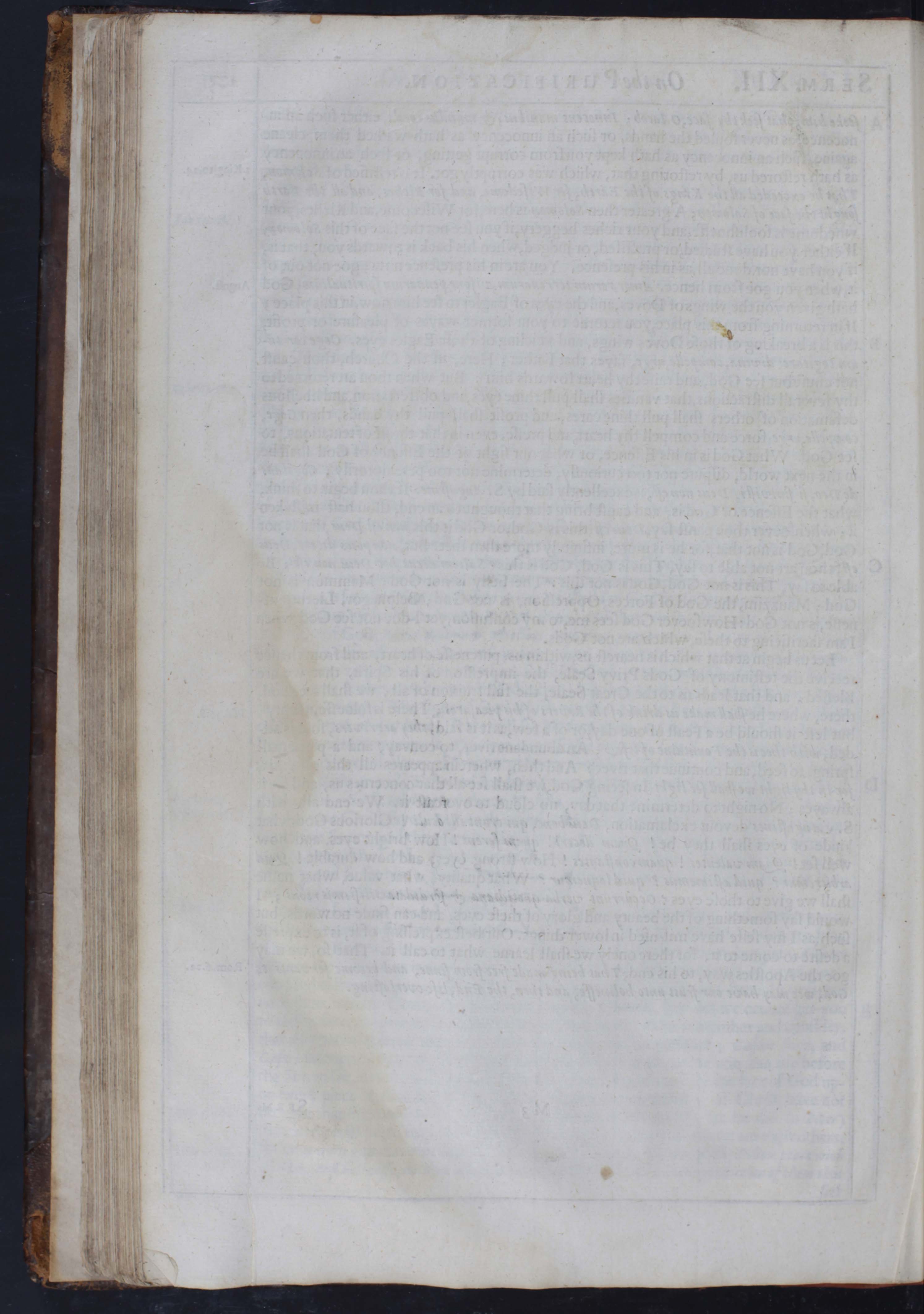
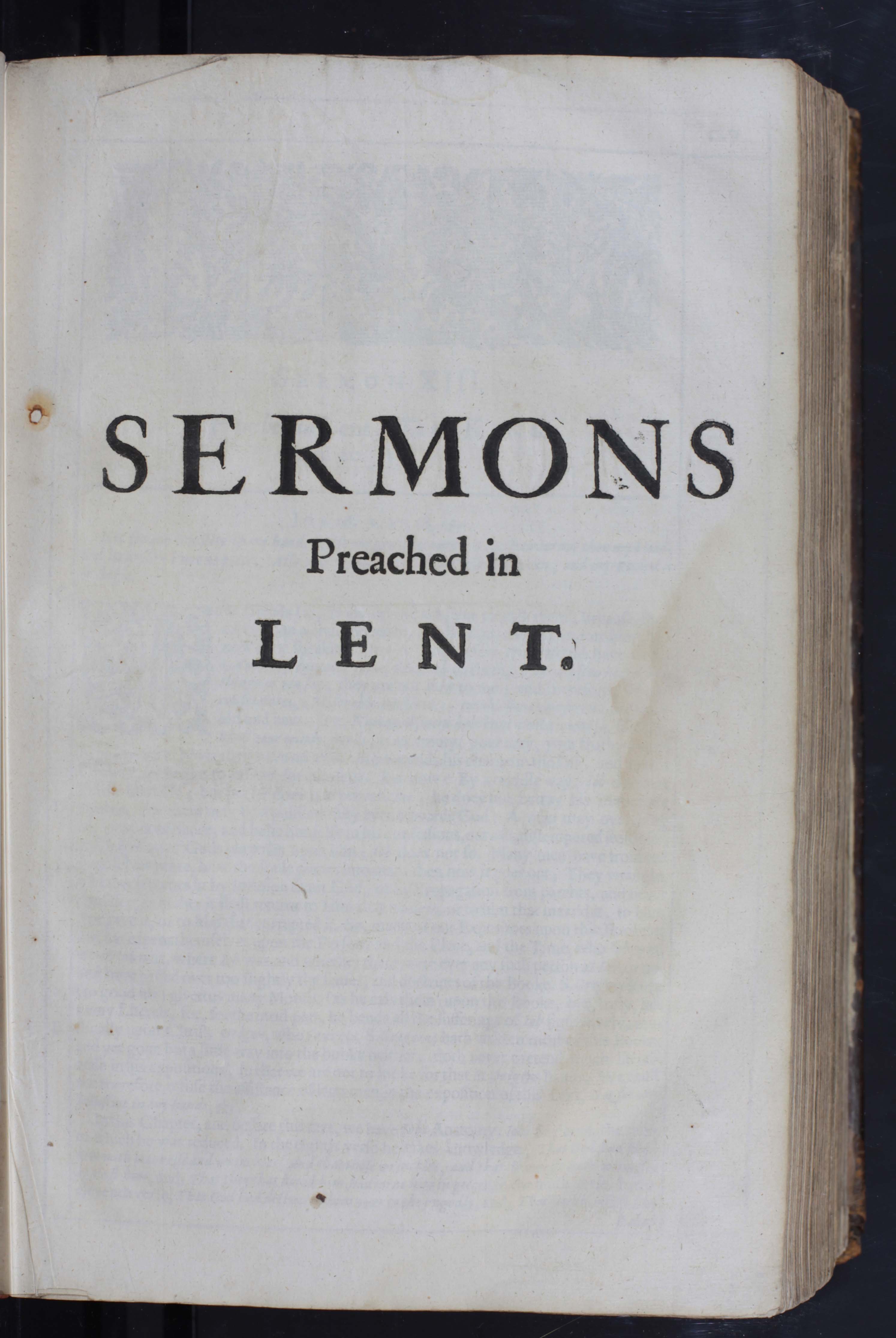
SERMONS
Preached in
LENT.
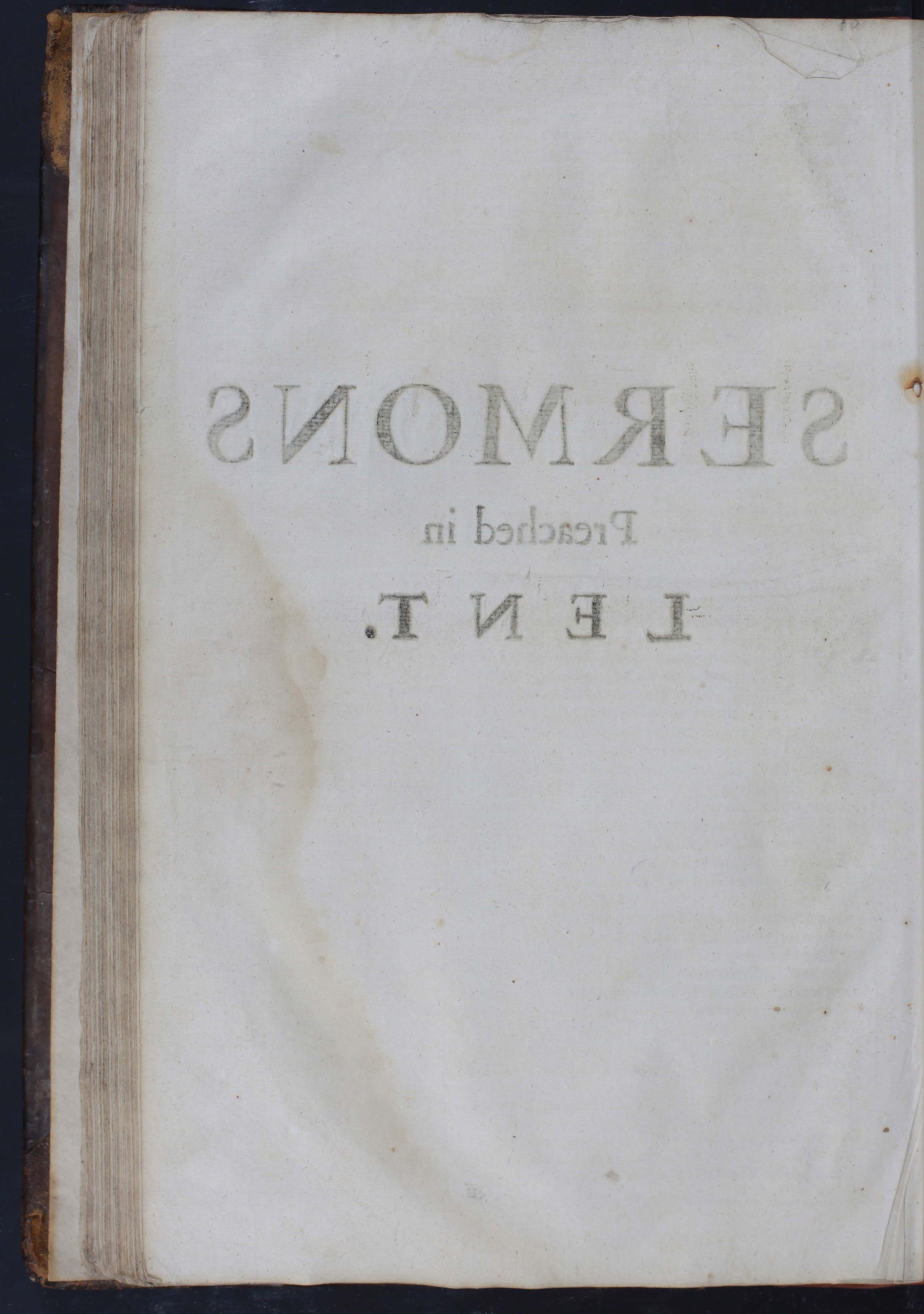
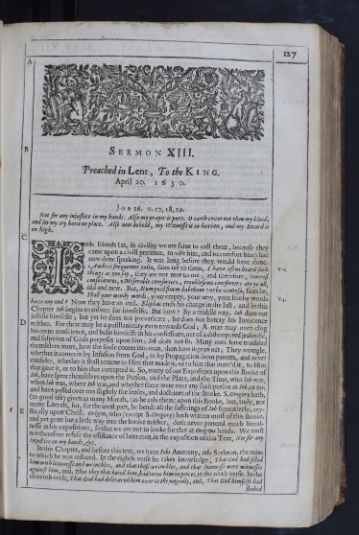 127
127
Sermon XIII.
Preached in Lent, To the King.
April 20. 1630.
Job 16. v. 17, 18, 19.
Not for any injustice in my hands: Also my prayer is pure. O earth cover not thou my blood;
and let my cry have no place. Also now behold, my Witnesse is in heaven, and my Record is
on high.
IObsIobs friends (as, in civility we are faine to call them, because they
came upon a civill pretence, to visit him, and to comfort him) had
now done speaking. It was long before they would have done.
Audivi frequenter talia, saies Iob to them, v. 2. I have often heard such
things as you say, they are not new to me; and therefore, Onerosi
consolatores, Miserable comforters, troublesome comforters are ye all,
old and new. But, Numquid finem habebunt verba ventosa, saies he,
Shall your windy words, your empty, your aery, v. 3. your frothy words
have any end? Now they have an end. Eliphas ends his charge in the last, and in this
Chapter Iob begins to answer for himselfe. But how? By a middle way. Iob does not
justifie himselfe; but yet he does not prevaricate, he does not betray his Innocence
neither. For there may be a pusillanimity even towards God; A man may over-clog
his owne conscience, and belie himselfe in his confessions, out of a distempered jealousie,
and suspition of Gods purposes upon him; Iob does not so. Many men have troubled
themselves more, how the soule comes into man, then how it goes out; They wrangle,
whether it comes in by Infusion from God, or by Propagation from parents, and never
consider, whether it shall returne to Him that made it, or to him that marr'd it, to Him
that gave it, or to him that corrupted it. So, many of our Expositors upon this Booke of
Iob, have spent themselves upon the Person, and the Place, and the Time, who Iob was,
when Iob was, where Iob was, and whether there were ever any such person as Iob, or no;
and have passed over too slightly the senses, and doctrines of the Booke. S. Gregory hath,
(to good use) given us many Morals, (as he cals them) upon this Booke, but, truly, not
many Literals, for, for the most part, he bends all the sufferings of Iob figuratively, my-
stically upon Christ. Origen, who (except S. Gregory) hath written most of this Booke,
and yet gone but a little way into the booke neither, doth never pretend much literal-
nesse in his expositions, so that we are not to looke for that at Origens hands. We must
not therefore refuse the assistance of later men, in the exposition of this Text, Not for any
Injustice in my hands, &c.
In this Chapter, and before this text, we have Iobs Anatomy, Iobs Sceleton, the ruins
to which he was reduced. In the eighth verse he takes knowledge, That God had filled
him with leannesse and wrinckles, and that those wrinckles, and that leannesse were witnesses
against him, and, That they that hated him, had torne him in peeces, in the ninth verse. In the
eleventh verse, That God had delivered him over to the ungodly, and, That God himselfe had shaked
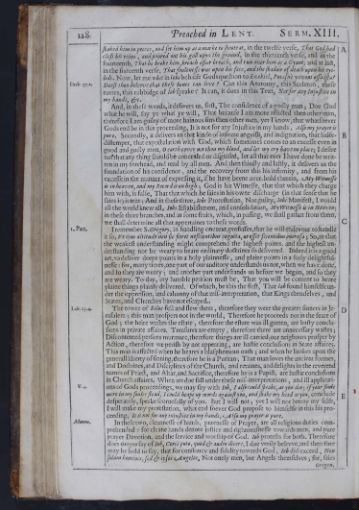 128
Preached in Lent.
Serm. XIII.
shaked him in peeces, and set him up as a marke to shoote at, in the twelfe verse, That God had
128
Preached in Lent.
Serm. XIII.
shaked him in peeces, and set him up as a marke to shoote at, in the twelfe verse, That God had
cleft his reins, and poured out his gall upon the ground, in the thirteenth verse, and in the
fourteenth, That he broke him, breach after breach, and run over him as a Gyant, and at last,
in the sixteenth verse, That foulenesse was upon his face, and the shadow of death upon his eye-
lids. Now, let me aske in Iobs behalfe Gods question to Ezekiel, Putasnè vivent ossaista?
Doest thou beleeve that these bones can live?Ezek. 37.2. Can this Anatomy, this Sceleton, these
ruines, this rubbidge of Iob speake? It can, it does in this Text, Not for any Injustice in
my hands, &c.
And, in these words, it delivers us, first, The confidence of a godly man; Doe God
what he will, say ye what ye will, That because I am more afflicted then other men,
therefore I am guilty of more hainous sins then other men, yet I know, that whatsoever
Gods end be in this proceeding, It is not for any Injustice in my hands, Also my prayer is
pure. Secondly, it delivers us that kinde of infirme anguish, and indignation, that halfe-
distemper, that expostulation with God, which sometimes comes to an excesse even in
good and godly men, O earth cover not thou my blood, and let my cry have no place; I desire
not that any thing should be concealed or disguised, let all that ever I have done be writ-
ten in my forehead, and read by all men. And then thirdly and lastly, it delivers us the
foundation of his confidence, and the recovery from this his infirmity, and from his
excesse in the manner of expressing it, if he have beene over-bold therein, My Witnesse
is in heaven, and my Record is on high; God is his Witnesse, that that which they charge
him with, is false, That that which he saies in his owne discharge (in that sense that he
saies it) is true; And in these three, Iobs Protestation, Not guilty, Iobs Manifest, I would
all the world knew all, Iobs Establishment, and consolidation, My Witnesse is in Heaven;
in these three branches, and in some fruits, which, in passing, we shall gather from them,
we shall determine all that appertaines to these words.
I remember S. Gregory,1. Part. in handling one text, professes, that he will endevour to handle
it so, Vt ejus altitudo non sic fieret nescientibus cognita, ut esset scientibus onerosa; So, as that
the weakest understanding might comprehend the highest points, and the highest un-
derstanding not be weary to heare ordinary doctrines so delivered. Indeed it is a good
art, to deliver deepe points in a holy plainnesse, and plaine points in a holy delightful-
nesse: for, many times, one part of our auditory understands us not, when we have done,
and so they are weary; and another part understands us before we begun, and so they
are weary. To day, my humble petition must be, That you will be content to heare
plaine things plainly delivered. Of which, be this the first, That Iob found himselfe un-
der the oppression, and calumny of that mis-interpretation, that Kings themselves, and
States, and Churches have not escaped.
The towre of Siloe fell and slew them, Luk. 13.4. therefore they were the greater sinners in Je-
rusalem; this man prospers not in the world, Therefore he proceeds not in the feare of
God; the heire wastes the estate, therefore the estate was ill gotten, are hasty conclu-
sions in private affaires. Treasures are empty, therefore there are unnecessary wastes;
Discontented persons murmure, therefore things are ill carried; our neigbours prosper by
Action, therefore we perish by not appearing, are hastie conclusions in State affaires.
This man is affected when he heares a blasphemous oath; and when he lookes upon the
generall liberty of sinning; therefore he is a Puritan; That man loves the ancient formes,
and Doctrines, and Disciplines of the Church, and retaines, and delights in the reverend
names of Priest, and Altar, and Sacrifice, therefore he is a Papist, are hastie conclusions
in Church affaires. When we doe fall under these mis-interpretations, and ill applicati-
ons of Gods proceedings, V. 4. we may say with Iob, I also could speake, as you doe; if your soule
were in my soules stead, I could heape up words against you, and shake my head at you, conclude
desperately, speake scornefully of you. But I will not; yet I will not betray my selfe,
I will make my protestation, what end soever God propose to himselfe in this his pro-
ceeding, It is not for any injustice in my hands, Also my prayer is pure.
In these two, Manus. cleannesse of hands, purenesse of Prayer, are all religious duties com-
prehended: for cleane hands denote justice and righteousnesse towards men, and pure
prayer Devotion, and the service and worship of God. Iob protests for both. Therefore
does Origen say of Iob, Certè puto, quod & audeo dicere, I doe verily beleeve, and therefore
may be bold to say, that for constancy and fidelity towards God, Iob did exceed, Non
solum homines, sed & ipsos Angelos, Not onely men, but Angels themselves; for, saies Origin,
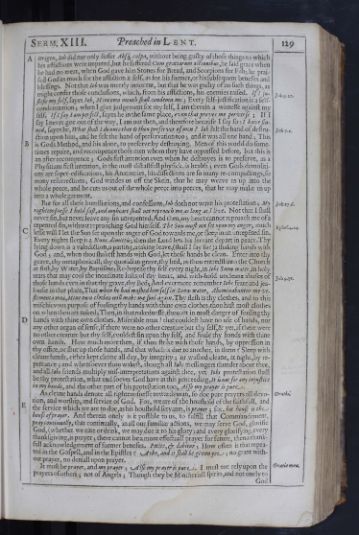 Serm. XIII.
Preached in Lent.
129
Origen, Iob did not only suffer AbsAbsque culpa, without being guilty of those things to which
Serm. XIII.
Preached in Lent.
129
Origen, Iob did not only suffer AbsAbsque culpa, without being guilty of those things to which
his afflictions were imputed, but he suffered Cum gratiarum actionibus, he said grace when
he had no meat, when God gave him Stones for Bread, and Scorpions for Fish; he prai-
sed God as much for the affliction it self, as for his former, or his subsequent benefits and
blessings. Not that Iob was meerly innocent, but that he was guilty of no such things, as
might confer those conclusions, which, from his afflictions, his enemies raised.Job 9.20. If I ju-
stifie my self, sayes Iob, Mine own mouth shall condemn me; Every self-justification is a self-
condemnation; when I give judgement for my self, I am therein a witnesse against my
self. If I say I am perfect, sayes he in the same place, even that proves me perverse; If I
say I never goe out of the way, I am out then, and therefore because I say so: I have sin-
ned, sayes he, What shall I do unto thee O thou preserver of men?Job 7.2. Iob felt the hand of destru-
ction upon him, and he felt the hand of preservation too; and it was all one hand; This
is Gods Method, and his alone, to preserve by destroying. Men of this world do some-
times repaire, and recompence those men whom they have oppressed before, but this is
an after recompence; Gods first intention even when he destroyes is to preserve, as a
Physitians first intention, in the most distastfull physick, is health; even Gods demoliti-
ons are super-edifications, his Anatomies, his dissections are so many re-compactings, so
many resurrections; God windes us off the Skein, that he may weave us up into the
whole peece, and he cuts us out of the whole peece into peeces, that he may make us up
into a whole garment.
But for all these humiliations, and confessions, Iob doth not wave his protestation;Job. 27.6. My
righteousnesse I hold fast, and my heart shall not reproach me as long as I live. Not that I shall
never sin, but never leave any sin unrepented; And then, my heart cannot reproach me of a
repented sin, without reproaching God himself. The Sun must not set upon my anger;Ephes. 4.24. much
lesse will I let the Sun set upon the anger of God towards me, or sleep in an unrepēted sin.
Every nights sleep is a Nunc dimittis; then the Lord lets his servant depart in peace. Thy
lying down is a valediction, a parting, a taking leave, (shall I say so?) a shaking hands with
God; and, when thou shakest hands with God, let those hands be clean. Enter into thy
grave, thy metaphoricall, thy quotidian grave, thy bed, as thou entredst into the Church
at first, by Water, by Baptisme; Re-baptise thy self every night, in Iobs Snow water, in holy
tears that may cool the inordinate lusts of thy heart, Job 9.30. and with-hold uncleane abuses of
those hands even in that thy grave, thy Bed; And evermore remember Iobs feare and jea-
lousie in that place, That when he had washed himself in Snow water, Abominabuntur me ve-
stimenta mea, Mine own clothes will make me foul again. Thy flesh is thy clothes; and to this
mischievous purpose of fouling thy hands with thine own clothes, thou hast most clothes
on when thou art naked; Then, in that nakednesse, thou art in most danger of fouling thy
hands with thine own clothes. Miserable man! that couldest have no use of hands, nor
any other organ of sense, if there were no other creature but thy self, & yet, if there were
no other creature but thy self, couldest sin upon thy self, and foule thy hands with thine
own hands. How much more then, if thou strike with those hands, by oppression in
thy office, or shut up those hands, and that which is due to another, in them? Sleep with
cleane hands, either kept cleane all day, by integrity; or washed cleane, at night, by re-
pentance; and whensoever thou wakest, though all Iobs messengers thunder about thee,
and all Iobs friends multiply mis-interpretations against thee, yet Iobs protestation shall
be thy protestation, what end soever God have in this proceeding, It is not for any injustice
in my hands, and the other part of his protestation too, Also my prayer is pure.
As cleane hands denote all righteousnesse towards man, Oratio. so doe pure prayers all devo-
tion, and worship, and service of God. For, we are of the houshold of the faithfull, and
the service which we are to doe, as his houshold servants, is prayer; for, his house is the
house of prayer. And therein onely is it possible to us, to fulfill that Commandement,
pray continually, that continually, in all our familiar actions, we may serve God, glorifie
God, (whether we eate or drink, we may doe it to his glory) and every glorifying, every
thanksgiving, is prayer; there cannot be a more effectuall prayer for future, then a thank-
full acknowledgement of former benefits. Petite, & dabitur; How often is that repea-
ted in the Gospell, and in the Epistles? Aske, and it shall be given yee; no grant with-
out prayer, no deniall upon prayer.
It must be prayer, and my prayer; Also my prayer is pure.Oratio mea. I must not rely upon the
prayers of others; not of Angels; Though they be Ministeriall spirits, and not onely to God
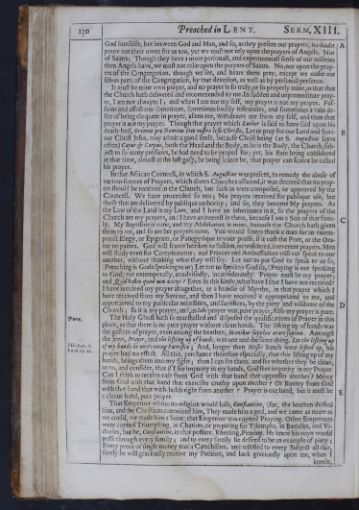 130
Preached in Lent.
Serm. XIII.
God himselfe, but between God and Man, and so, as they present our prayers, no doubt
130
Preached in Lent.
Serm. XIII.
God himselfe, but between God and Man, and so, as they present our prayers, no doubt
poure out their owne for us too, yet we must not rely upon the prayers of Angels. Nor
of Saints; Though they have a more personall, and experimentall sense of our miseries
then Angels have, we must not relie upon the prayers of Saints. No, nor upon the pray-
ers of the Congregation, though we see, and heare them pray, except we make our
selves parts of the Congregation, by true devotion, as well as by personall presence.
It must be mine own prayer, and no prayer is so truly, or so properly mine, as that that
the Church hath delivered and recommended to me. In sudden and unpremeditate pray-
er, I am not alwayes I; and when I am not my self, my prayer is not my prayer. Pas-
sions and affections sometimes, sometimes bodily infirmities, and sometimes a vain de-
sire of being eloquent in prayer, aliens me, withdraws me from my self, and then that
prayer is not my prayer. Though that prayer which Luther is said to have said upon his
death-bed, Oremus pro Domino Deo nostro Iesu Christo, Let us pray for our Lord and Savi-
our Christ Jesus, may admit a good sense, because Christ being (as S. Augustine sayes
often) Caput & Corpus, both the Head and the Body, as he is the Body, the Church, sub-
ject to so many pressures, he had need to be prayed for; yet, his state being considered
at that time, almost at the last gasp, he being scarce he, that prayer can scarce be called
his prayer.
In that African Councell, in which S. Augustine was present, to remedy the abuse of
various formes of Prayers, which divers Churches assumed, it was decreed that no pray-
ers should be received in the Church, but such as were composed, or approved by the
Councell. We have proceeded so too; No prayers received for publique use, but
those that are delivered by publique authority; and so, they become My prayers. As
the Law of the Land is my Law, and I have an inheritance in it, so the prayers of the
Church are my prayers, and I have an interest in them, because I am a Son of that fami-
ly. My Baptisme is mine, and my Absolution is mine, because the Church hath given
them to me, and so are her prayers mine. You would scarce thank a man for an extem-
porall Elegy, or Epigram, or Panegyrique in your praise, if it cost the Poet, or the Ora-
tor no paines. God will scarce hearken to sudden, inconsidered, irreverent prayers. Men
will study even for Complements; and Princes and Ambassadors will not speak to one
another, without thinking what they will say. Let not us put God to speak to us so,
(Preaching is Gods speaking to us) Let not us speak to God so, (Praying is our speaking
to God) not extemporally, unadvisedly, inconsiderately. Prayer must be my prayer;
and Quid habeo quod non accepi? Even in this kinde, what have I that I have not received?
I have received my prayer altogether, as a bundle of Myrrhe, in that prayer which I
have received from my Saviour, and then I have received it appropriated to me, and
apportioned to my particular necessities, and sacrifices, by the piety and wisdome of the
Church; so it is my prayer, and, as Iobs prayer was, pure prayer, Also my prayer is pure.
The Pura. Holy Ghost hath so marshalled and disposed the qualifications of Prayer in this
place, as that there is no pure prayer without clean hands. The lifting up of hands was
the gesture of prayer, even among the heathen, Manibus supplex orare supinis. Amongst
the Jews, Prayer, and the lifting up of hands, was one and the same thing, Let the lifting up
of my hands be an evening Sacrifice;Psal. 141.2.
Exod. 17.11. And, longer then Moses hands were lifted up, his
prayer had no effect. All this, perchance therefore especially, that this lifting up of my
hands, brings them into my sight; then I can see them, and see whether they be clean,
or no, and consider, that if I see impurity in my hands, God sees impurity in my Prayer.
Can I think to receive ease from God with that hand that oppresses another? Mercy
from God with that hand that exercises cruelty upon another? Or Bounty from God
with that hand that with-holds right from another? Prayer is our hand, but it must be
a cleane hand, pure prayer.
That Emperour whom no religion would lose, Constantine, (for, the heathen deified
him, and the Christians canonized him, They made him a god, and we came as neare as
we could, we made him a Saint) that Emperour was coyned Praying. Other Emperours
were coyned Triumphing, in Chariots, or preparing for Triumphs, in Battailes, and Vi-
ctories, but he, Constantine, in that posture, Kneeling, Praying. He knew his coyn would
passe through every family; and to every family he desired to be an example of piety;
Every peece of single money was a Catechisme, and testified to every Subject all this,
surely he will graciously receive my Petition, and look graciously upon me, when I kneele
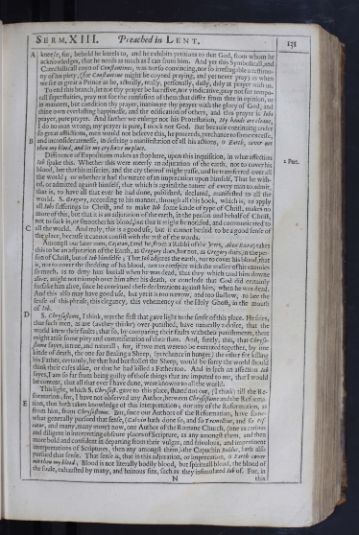 Serm. XIII.
On the Purification.
131
kneele, for, behold he kneels to, and he exhibits petitions to that God, from whom he
Serm. XIII.
On the Purification.
131
kneele, for, behold he kneels to, and he exhibits petitions to that God, from whom he
acknowledges, that he needs as much as I can from him. And yet this Symbolicall, and
Catechisticall coyn of Constantines, was not so convincing, nor so irrefragable a testimo-
ny of his piety, (for Constantine might be coyned praying, and yet never pray) as when
we see as great a Prince as he, actually, really, personally, daily, duly at prayer with us.
To end this branch, let not thy prayer be lucrative, nor vindicative, pray not for tempo-
rall superfluities, pray not for the confusion of them that differ from thee in opinion, or
in manners, but condition thy prayer, inanimate thy prayer with the glory of God, and
thine own everlasting happinesse, and the edification of others, and this prayer is Iobs
prayer, pure prayer. And farther we enlarge not his Protestation, My hands are cleane,
I do no man wrong; my prayer is pure, I mock not God. But because continuing under
so great afflictions, men would not beleeve this, he proceeds, perchance to some excesse,
and inconsideratenesse, in desiring a manifestation of all his actions, O Earth, cover not
thou my blood, and let my cry have no place.
Difference of Expositions makes us stop here, upon this inquisition, in what affection
Iob spake this. Whether this were meerly an adjuration of the earth, 2 Part. not to cover his
blood, but that his miseries, and the cry thereof might passe, and be transferred over all
the world; or whether it had the nature of an imprecation upon himself, That he wish-
ed, or admitted against himself, that which is against the nature of every man to admit,
that is, to have all that ever he had done, published, declared, manifested to all the
world. S. Gregory, according to his manner, through all this book, which is, to apply
all Iobs sufferings to Christ, and to make Iob some kinde of type of Christ, makes no
more of this, but that it is an adjuration of the earth, in the person and behalf of Christ,
not to suck in, or smoother his blood, but that it might be notified, and communicated to
all the world. And truly, this is a good use, but it cannot be said to be a good sense of
the place, because it cannot consist with the rest of the words.
Amongst our later men, Cajetan, (and he, from a Rabbi of the Jews, Aben Ezra) takes
this to be an adjuration of the Earth, as Gregory does, but not, as Gregory does, in the per-
son of Christ, but of Iob himselfe; That Iob adjures the earth, not to cover his blood, that
is, not to cover the shedding of his blood, not to conspire with the malice of his enemies
so much, as to deny him buriall when he was dead, that they which trod him downe
alive, might not triumph over him after his death, or conclude that God did certainly
forsake him alive, since he continued these declarations against him, when he was dead.
And this also may have good use, but yet it is too narrow, and too shallow, to bee the
sense of this phrase, this elegancy, this vehemency of the Holy Ghost, in the mouth
of Iob.
S. Chrysostome, I think, was the first that gave light to the sense of this place. He saies,
that such men, as are (as they thinke) over-punished, have naturally a desire, that the
world knew their faults; that so, by comparing their faults with their punishments, there
might arise some pitty and commiseration of their state. And, surely, this, that Chryso-
stome sayes, is true, and naturall; for, if two men were to be executed together, by one
kinde of death, the one for stealing a Sheep, (perchance in hunger) the other for killing
his Father, certainly, he that had but stollen the Sheep, would be sorry the world should
think their cases alike, or that he had killed a Father too. And in such an affection Iob
sayes, I am so far from being guilty of those things that are imputed to me, that I would
be content, that all that ever I have done, were knowne to all the world.
This light, which S. Chrysost. gave to this place, shined not out, (I think) till the Re-
formation; for, I have not observed any Author, between Chrysostome and the Reforma-
tion, that hath taken knowledge of this interpretation; nor any of the Reformation, as
from him, from Chrysostome. But, since our Authors of the Reformation, have some-
what generally pursued that sense, (Calvin hath done so, and so Tremellius, and so Pis-
cator, and many, many more) now, one Author of the Romane Church, (one as curious
and diligent in interpreting obscure places of Scripture, as any amongst them, and then
more bold and confident in departing from their vulgar, and frivolous, and impertinent
interpretations of Scriptures, then any amongst them) the Capuchin Bolduc, hath also
pursued that sense. That sense is, that in this adjuration, or imprecation, O Earth cover
not thou my blood; Blood is not literally bodily blood, but spirituall blood, the blood of
the soule, exhausted by many, and hainous sins, such as they insimulated Iob of. For, in N this
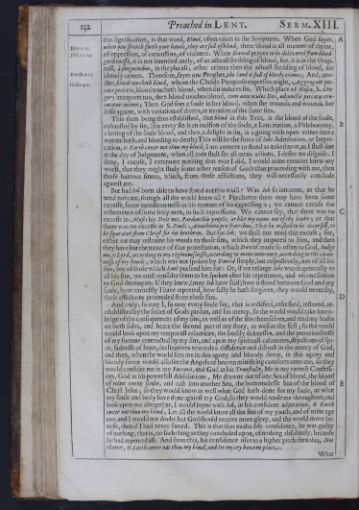 132
Preached in Lent.
Serm. XIII.
this signification, is that word, Blood, often taken in the Scriptures. When God sayes,
132
Preached in Lent.
Serm. XIII.
this signification, is that word, Blood, often taken in the Scriptures. When God sayes,
when you stretch forth your hands,Esay 1.15. they are full of blood, there blood is all manner of rapine,
Psal. 51.14. of oppression, of concussion, of violence. When David prayes to be delivered from blood-
guiltinesse, it is not intended onely, of an actuall shedding of blood, for, it is in the Origi-
nall, à sanguinibus, in the plurall; other crimes then the actuall shedding of blood, are
bloody crimes.Ezech 7.23. Therefore, sayes one Prophet, the land is full of bloody crimes; And, ano-
ther, blood toucheth blood,Hosea 4.2. whom the Chalde Paraprase expresses aright, Aggregant pec-
cata peccatis, blood toucheth blood, when sin induces sin. Which place of Hosea, S. Gre-
gory interprets too, then blood touches blood, cum ante oculos Dei, adjunctis peccatis cru-
entatur anima; Then God sees a soule in her blood, when she wounds and wounds her
selfe againe, with variation of divers, or iteration of the same sins.
This then being thus established, that blood in this Text, is the blood of the soule,
exhausted by sin, (for every sin is an incision of the soule, a Lancination, a Phlebotomy,
a letting of the soule blood, and then, a delight in sin, is a going with open veines into a
warme bath, and bleeding to death) This will be the force of Iobs Admiration, or Impre-
cation, O Earth cover not thou my blood, I am content to stand as naked now, as I shall doe
at the day of Judgement, when all men shall see all mens actions, I desire no disguise, I
deny, I excuse, I extenuate nothing that ever I did, I would mine enemies knew my
worst, that they might study some other reason of Gods thus proceeding with me, then
those hainous sinnes, which, from these afflictions, they will necessarily conclude
against me.
But had Iob been able to have stood out this triall? Was Iob so innocent, as that he
need not care, though all the world knew all? Perchance there may have been some
excesse, some inordinatenesse in his manner of his expressing it; we cannot excuse the
vehemence of some holy men, in such expressions. We cannot say, that there was no
excesse in Moses his Dele me, Pardon this people, or blot my name out of thy booke; or that
there was no excesse in S. Pauls Anathema pro fratribus, That he wished to be accursed, to
be separated from Christ for his brethren. But for Iob, we shall not need this excuse; for,
either we may restraine his words to those sins, which they imputed to him, and then
they have but the nature of that protestation, which David made so often to God, Iudge
me, O Lord, according to my righteousnesse, according to mine innocency, according to the clean-
nesse of my hands; which was not spoken by David simply, but respectively, not of all his
sins, but of those which Saul pursued him for: Or, if we enlarge Iobs words generally to
all his sins, we must consider them to be spoken after his repentance, and reconciliation
to God thereupon; If they knew, (may Iob have said) how it stood between God and my
soule, how earnestly I have repented, how fully he hath forgiven, they would never say,
these afflictions proceeded from those sins.
And truly, so may I, so may every soule say, that is rectified, refreshed, restored, re-
established by the seales of Gods pardon, and his mercy, so the world would take know-
ledge of the consequences of my sins, as well as of the sins themselves, and read my leafes
on both sides, and heare the second part of my story, as well as the first; so the world
would look upon my temporall calamities, the bodily sicknesses, and the penuriousnesse
of my fortune contracted by my sins, and upon my spirituall calamities, dejections of spi-
rit, sadnesse of heart, declinations towards a diffidence and distrust in the mercy of God,
and then, when the world sees me in this agony and bloody sweat, in this agony and
bloody sweat would also see the Angels of heaven ministring comforts unto me; so they
would consider me in my Peccavi, and God in his Transtulit, Me in my earnest Confessi-
ons, God in his powerfull Absolutions, Me drawne out of one Sea of blood, the blood
of mine owne soule, and cast into another Sea, the bottomelesse Sea of the blood of
Christ Jesus; so they would know as well what God hath done for my soule, as what
my soule and body have done against my God; so they would reade me throughout, and
look upon me altogether, I would joyne with Iob, in his confident adjuration, O Earth
cover not thou my blood; Let all the world know all the sins of my youth, and of mine age
too, and I would not doubt, but God should receive more glory, and the world more be-
nefit, then if I had never sinned. This is that that exalts Iobs confidence, he was guilty
of nothing, that is, no such thing as they concluded upon, of nothing absolutely, because
he had repented all. And from this, his confidence rises to a higher pitch then this, Nec
clamor, O Earth cover not thou my blood, and let my cry have no place. What
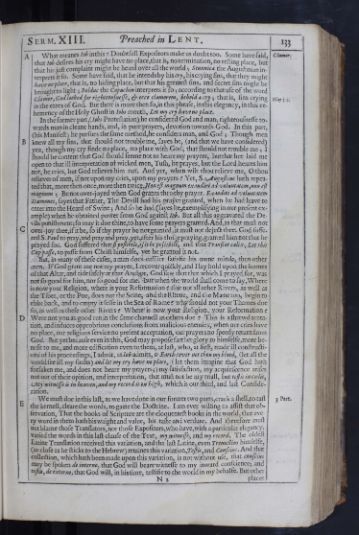 Serm. XIII.
Preached in Lent.
133
Serm. XIII.
Preached in Lent.
133
What meanes Iob in this? Doubtfull Expositors make us doubt too. Some have said, Clamor.
that Iob desires his cry might have no place, that is, no termination, no resting place, but
that his just complaint might be heard over all the world; Stunnica the Augustinian in-
terprets it so. Some have said, that he intends by his cry, his crying sins, that they might
have no place, that is, no hiding place, but that his greatest sins, and secret sins might be
brought to light; Bolduc the Capuchin interprets it so; according to that use of the word
Clamor, God looked for righteousnesse, & ecce clamorem, behold a cry; that is, Esay 5.7. sins crying
in the eares of God. But there is more then so, in this phrase, in this elegancy, in this ve-
hemency of the Holy Ghost in Iobs mouth, Let my cry have no place.
In the former part, (Iobs Protestation) he considered God and man; righteousnesse to-
wards man in cleane hands, and, in pure prayers, devotion towards God. In this part,
(his Manifest) he pursues the same method, he considers man, and God; Though men
knew all my sins, that should not trouble me, sayes he, (and that we have considered)
yea, though my cry finde no place, no place with God, that should not trouble me; I
should be content that God should seeme not to heare my prayers, but that hee laid me
open to that ill interpretation of wicked men, Tush, he prayes, but the Lord heares him
not, he cries, but God relieves him not. And yet, when wilt thou relieve me, O thou
reliever of men, if not upon my cries, upon my prayers? Yet, S. Augustine hath repea-
ted that, more then once, more then twice, Non est magnum exaudiri ad voluntatem, non est
magnum; Be not over-joyed when God grants thee thy prayer. Exauditi ad voluntatem
Dæmones, sayes that Father, The Devill had his prayer granted, when he had leave to
enter into the Heard of Swine; And so he had (sayes he, exemplifying in our present ex-
ample) when he obtained power from God against Iob. But all this aggravated the De-
vils punishment; so may it doe thine, to have some prayers granted. And, as that must not
over-joy thee, if it be, so if thy prayer be not granted, it must not deject thee. God suffe-
red S. Paul to pray, and pray and pray, yet, after his thrice praying, granted him not that he
prayed for. God suffered that si possibile, if it be possibile, and that Transeat calix, Let this
Cup passe, to passe from Christ himselfe, yet he granted it not.
But, in many of these cases, a man does easilier satisfie his owne minde, then other
men. If God grant me not my prayer, I recover quickly, and I lay hold upon the hornes
of that Altar, and ride safely at that Anchor, God saw that that which I prayed for, was
not so good for him, nor so good for me. But when the world shall come to say, Where
is now your Religion, where is your Reformation? doe not all other Rivers, as well as
the Tiber, or the Poe, does not the Seine, and the Rhene, and the Mæne too, begin to
ebbe back, and to empty it selfe in the Sea of Rome? why should not your Thames doe
so, as well as these other Rivers? Where is now your Religion, your Reformation?
Were not you as good run in the same channell as others doe? This is a shrewd tenta-
tion, and induces opprobrious conclusions from malicious enemies, when our cries have
no place, our religious service no present acceptation, our prayers no speedy return from
God. But yet because even in this, God may propose farther glory to himselfe, more be-
nefit to me, and more edification even to them, at last, who, at first, made ill constructi-
ons of his proceedings, I admit, as Iob admits, O Earth cover not thou my blood, (let all the
world see all my faults) and let my cry have no place, (let them imagine that God hath
forsaken me, and does not heare my prayers;) my satisfaction, my acquiescence arises
not out of their opinion, and interpretation, that must not be my triall, but testis in cœlis,
My witnesse is in heaven, and my record is on high, which is our third, and last Conside-
ration.
We must doe in this last, as we have done in our former two parts, crack a shell, 3 Part. to tast
the kernell, cleare the words, to gaine the Doctrine. I am ever willing to assist that ob-
servation, That the books of Scripture are the eloquentest books in the world, that eve-
ry word in them hath his waight and value, his taste and verdure. And therefore must
not blame those Translators, nor those Expositors, who have, with a particular elegancy,
varied the words in this last clause of the Text, my witnesse, and my record. The oldest
Latine Translation received this variation, and the last Latine, even Tremellius himselfe,
(as close as he sticks to the Hebrew) retaines this variation, Testis, and Conscius. And that
collection, which hath been made upon this variation, is not without use, that conscius
may be spoken de interno, that God will beare witnesse to my inward conscience; and
testis, de externo, that God will, in his time, testifie to the world in my behalfe. But other N2 places
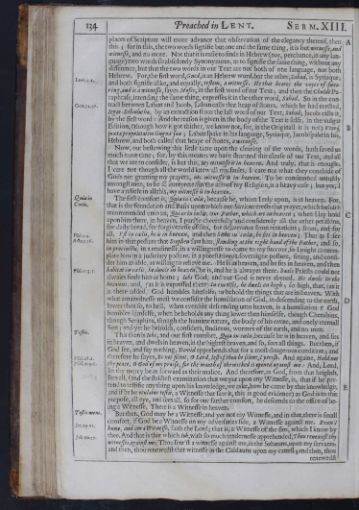 134
Preached in Lent.
Serm. XIII.
places of Scripture will more advance that observation of the elegancy thereof, then
134
Preached in Lent.
Serm. XIII.
places of Scripture will more advance that observation of the elegancy thereof, then
this; for in this, the two words signifie but one and the same thing, it is but witnesse, and
witnesse, and no more. Not that it is easie to finde in Hebrew (nor, perchance, in any lan-
guage) two words so absolutely Synonymous, as to signifie the same thing, without any
difference, but that the two words in our Text are not both of one language, not both
Hebrew. For, the first word, Gned, is an Hebrew word, but the other, Sahad, is Syriaque;
and both signifie alike, Levit. 5.1. and equally, testem, a witnesse. He that heares the voyce of swea-
ring, and is a witnesse, sayes Moses, in the first word of our Text; and then the Chalde Pa-
raphrase, intending the same thing, expresses it in the other word, Sahad. So in the con-
tract between Laban and Jacob, Gen. 31.47. Laban calls that heap of stones, which he had erected,
Iegar-Sehadutha, by an extraction from the last word of our Text, Sahad; Jacob calls it,
by the first word: And the reason is given in the body of the Text it selfe, in the vulgat
Edition, (though how it got thither, we know not, for, in the Originall it is not) VterVterque
juxta proprietatem linguæ suæ; Laban spake in his language, Syriaque, Jacob spake in his,
Hebrew, and both called that heape of stones, a witnesse.
Now, our bestowing this little time upon the clearing of the words, hath saved us
much more time; for, by this meanes we have shortned this clause of our Text, and all
that we are to consider, is but this, My witnesse is in heaven. And truly, that is enough;
I care not though all the world knew all my faults, I care not what they conclude of
Gods not granting my prayers, my witnesse is in heaven. To be condemned unjustly
amongst men, to be ill interpreted in the acts of my Religion, is a heavy case; but yet, I
have a reliefe in all this, my witnesse is in heaven.
The first comfort is, Quia in
Cœlis. Quia in Cœlis, because he, whom I rely upon, is in heaven. For,
that is the foundation and Basis upon which our Saviour erects that prayer, which he hath
recommended unto us, Qui es in cœlis, Our Father, which art in heaven; when I lay hold
upon him there, in heaven, I pursue cheerefully and confidently all the other petitions,
for daily bread, for forgivenesse of sins, for deliverance from tentations; from, and for
all.Psal. 2.4. Est in cœlis, he is in heaven, and then Sedet in cœlis, be sits in heaven; That as I see
him in that posture that Stephen saw him, Acts. 7.56. standing at the right hand of the Father, and so,
in procinctu, in a readinesse, in a willingnesse to come to my succour, so I might contem-
plate him in a judiciary posture, in a potestative, a soveraigne posture, sitting, and consi-
der him as able, as willing to relieve me. He is in heaven, and he sits in heaven, and then
habitat in cœlis, he dwels in heaven,Psal. 113.5. he is, and he is alwayes there. Baals Priests could not
alwaies finde him at home; Iobs God, and our God is never abroad. He dwels in the
heavens, and, (as it is expressed there) In excelsis, he dwels on high; so high, that, (as it
is there added) God humbles himselfe, to behold the things that are in heaven. With
what amazednesse must we consider the humiliation of God, in descending to the earth,
lower then so, to hell, when even his descending unto heaven, is a humiliation? God
humbles himselfe, when he beholds any thing lower then himselfe, though Cherubins,
though Seraphins, though the humane nature, the body of his owne, and onely eternall
Son; and yet he beholds, considers, studies us, wormes of the earth, and no men.
This then is Iobs,Testis. and our first comfort, Quia in cœlis, because he is in heaven, and sits
in heaven, and dwels in heaven, in the highest heaven, and so, sees all things. But then, if
God see, and say nothing, David apprehends that for a most dangerous condition; and
therefore he sayes, Psal. 28.1. Be not silent, O Lord, lest if thou be silent, I perish. And againe, Hold not
thy peace, O God of my praise, for the mouth of the wicked is opened against me: Psal. 109.1. And, Lord,
let thy mercy be as forward as their malice. And therefore, as God, from that heighth,
sees all, (and the strictest examination that we put upon any Witnesse, is, that if he pre-
tend to testifie any thing upon his knowledge, we aske, how he came by that knowledge,
and if he be oculatus testis, a Witnesse that saw it, this is good evidence) as God is to this
purpose, all eye, and sees all, so for our farther comfort, he descends to the office of be-
ing a Witnesse, There is a Witnesse in heaven.
But then, Testis meus. God may be a Witnesse, and yet not my Witnesse, and in that, there is small
comfort, Jer. 29.22. if God be a Witnesse on my adversaries side, a Witnesse against me. Even I
know, and am a Witnesse, saith the Lord; that is, a Witnesse of the sins, which I know by
thee.Job 10.27. And that is that which Iob, with so much tendernesse apprehended, Thou renewest thy
witnesses against me; Thou sent'st a witnesse against me, in the Sabæans, upon my servants;
and then, thou renewedst that witnesse in the Caldæans upon my cattell; and then, thou renewedst
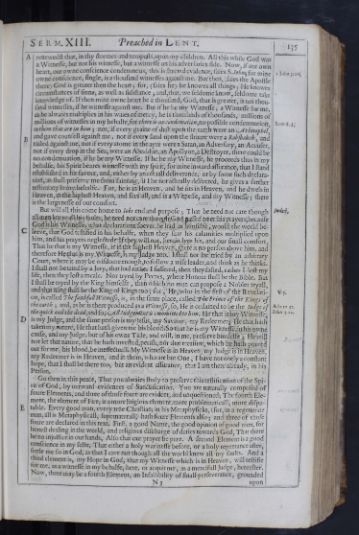 Serm. XIII.
Preached in Lent.
135
renewedst that, in thy stormes and tempests, upon my children. All this while God was
Serm. XIII.
Preached in Lent.
135
renewedst that, in thy stormes and tempests, upon my children. All this while God was
a Witnesse, but not his witnesse, but a witnesse on his adversaries side. Now, if our own
heart, our owne conscience condemne us, this is shrewd evidence, saies S. Iohn;1 Iohn 3.20 for mine
owne conscience, single, is a thousand witnesses against me. But then, (saies the Apostle
there) God is greater then the heart; for, (saies he) he knowes all things; He knowes
circumstances of sinne, as well as substance; and, that, we seldome know, seldome take
knowledge of. If then mine owne heart be a thousand, God, that is greater, is ten thou-
sand witnesses, if he witnesse against me. But if he be my Witnesse, a Witnesse for me,
as he alwaies multiplies in his waies of mercy, he is thousands of thousands, millions of
millions of witnesses in my behalfe, for Rom. 8.1. there is no condemation, no possible condemnation,
to them that are in him; not, if every graine of dust upon the earth were an Achitophel,
and gave counsell against me, not if every sand upon the shoare were a Rabshakeh, and
railed against me, not if every atome in the ayre were a Satan, an Adversary, an Accuser,
not if every drop in the Sea, were an Abaddon, an Apollyon, a Destroyer, there could be
no condemuation, if he be my Witnesse. If he be my Witnesse, he proceeds thus in my
behalfe, his Spirit beares witnesse with my spirit, for mine inward assurance, that I stand
established in his favour, and, either by an actuall deliverance, or by some such declara-
tion, as shall preserve me from fainting, if I be not actually delivered, he gives a farther
testimony in my behalfe. For, he is in Heaven, and he sits in Heaven, and he dwels in
Heaven, in the highest Heaven, and sees all, and is a Witnesse, and my Witnesse; there
is the largenesse of our comfort.
But will all this come home to Iobs end and purpose;Index. That he need not care though
all men knew all his faults, he need not care though God passed over his prayers, because
God is his Witnesse; what declarations soever he had in himselfe, would the world be-
leeve, that God testified in his behalfe, when they saw his calamities multiplied upon
him, and his prayers neglected? If they will not, herein lyes his, and our finall comfort,
That he that is my Witnesse, is in the highest Heaven, there is no person above him, and
therefore He that is my Witnesse, is my Judge too. I shall not be tried by an arbitrary
Court, where it may be wisdome enough, to follow a wise leader, and think as he thinks.
I shall not be tried by a Jury, that had rather I suffered, then they fasted, rather I lost my
life, then they lost a meale. Nor tryed by Peeres, where Honour shall be the Bible. But
I shall be tryed by the King himselfe, then which no man can propose a Nobler tryall,
and that King shall be the King of Kings too; for, He, V. 5. who in the first of the Revelati-
on, is called The faithfull Witnesse, is, in the same place, called The Prince of the Kings of
the earth; and, as he is there produced as a Witnesse, so, Acts 10 42.10.42. He is ordained to be the Iudge of
the quick and the dead, and so, Iohn 5.22. All Iudgement is committed to him. He that is my Witnesse,
is my Judge, and the same person is my Jesus, my Saviour, my Redeemer; He that hath
taken my nature, He that hath given me his blood. So that he is my Witnesse, in his owne
cause, and my Judge, but of his owne Title, and will, in me, preserve himselfe; He will
not let that nature, that he hath invested, perish, nor that treasure, which he hath poured
out for me, his blood, be ineffectuall. My Witnesse is in Heaven, my Judge is in Heaven;
my Redeemer is in Heaven, and in them, who are but One, I have not onely a constant
hope, that I shall be there too, but an evident assurance, that I am there already, in his
Person.
Go then in this peace, That you alwaies study to preserve this testification of the Spi-
rit of God, by outward evidences of Sanctification. You are naturally composed of
foure Elements, and three of those foure are evident, and unquestioned; The fourth Ele-
ment, the element of Fire, is a more litigious element, more problematicall, more dispu-
table. Every good man, every true Christian, in his Metaphysicks, (for, in a regenerate
man, all is Metaphysicall, supernaturall) hath foure Elements also; and three of those
foure are declared in this text. First, a good Name, the good opinion of good men, for
honest dealing in the world, and religious discharge of duties towards God, That there
be no injustice in our hands, Also that our prayer be pure. A second Element is a good
conscience in my selfe, That either a holy warinesse before, or a holy repentance after,
settle me so in God, as that I care not though all the world knew all my faults. And a
third element is, my Hope in God, that my Witnesse which is in Heaven, will testifie
for me, as a witnesse in my behalfe, here, or acquit me, as a mercifull Judge, hereafter.
Now, there may be a fourth Element, an Infallibility of finall perseverance, grounded N3 upon
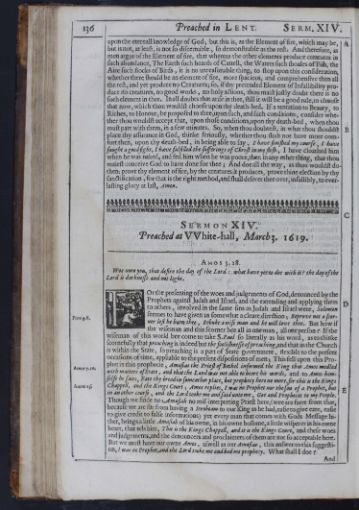 136Preached in Lent.
Serm. XIV.
upon the eternall knowledge of God; but this is, as the Element of fire, which may be,
136Preached in Lent.
Serm. XIV.
upon the eternall knowledge of God; but this is, as the Element of fire, which may be,
but is not, at least, is not so discernable, so demonstrable as the rest. And therefore, as
men argue of the Element of fire, that whereas the other elements produce creatures in
such abundance, The Earth such heards of Cattell, the Waters such shoales of Fish, the
Aire such flocks of Birds, it is no unreasonable thing, to stop upon this consideration,
whether there should be an element of fire, more spacious, and comprehensive then all
the rest, and yet produce no Creatures; so, if thy pretended Element of Infallibility pro-
duce no creatures, no good works, no holy actions, thou maist justly doubt there is no
such element in thee. In all doubts that arise in thee, still it will be a good rule, to choose
that now, which thou wouldst choose upon thy death-bed. If a tentation to Beauty, to
Riches, to Honour, be proposed to thee, upon such, and such conditions, consider whe-
ther thou wouldst accept that, upon those conditions, upon thy death-bed, when thou
must part with them, in a few minutes. So, when thou doubtest, in what thou shouldst
place thy assurance in God, thinke seriously, whether thou shalt not have more com-
fort then, upon thy death-bed, in being able to say, I have finished my course, I have
fought a good fight, I have fulfilled the sufferings of Christ in my flesh, I have cloathed him
when he was naked, and fed him when he was poore, then in any other thing, that thou
maiest conceive God to have done for thee; And doe all the way, as thou wouldst do
then; prove thy element of fire, by the creatures it produces, prove thine election by thy
sanctification; for that is the right method, and shall deliver thee over, infallibly, to ever-
lasting glory at last, Amen.
Sermon XIV.
Preached at VVhite-hallWhite-hall, March 3. 1619.
Amos 5.18.
Woe unto you, that desire the day of the Lord: what have yee to doe with it? the day of the
Lord is darknesse and not light.
FOrFor the presenting of the woes and judgements of God, denounced by the
Prophets against Judah and Israel, and the extending and applying them
to others, involved in the same sins as Judah and Israel were, Solomon
seemes to have given us somewhat a cleare direction;Prov. 9.8. Reprove not a scor-
ner lest he hate thee, Rebuke a wise man and he will love thee. But how if
the wiseman and this scorner bee all in one man, all one person? If the
wiseman of this world bee come to take S. Paul so literally as his word, as to thinke
scornefully that preaching is indeed but the foolishnesse of preaching, and that as the Church
is within the State, so preaching is a part of State government, flexible to the present
occasions of time, appliable to the present dispositions of men; This fell upon this Pro-
phet in this prophecie, Amos 7.10. Amasias the Priest of Bethel informed the King that Amos medled
with matters of State, and that the Land was not able to beare his words, and to Amos him-
selfe he saies, Eate thy bread in some other place, but prophecy here no more, for this is the Kings
Chappell,Amos 13. and the Kings Court; Amos replies, I was no Prophet nor the son of a Prophet, but
in an other course, and the Lord tooke me and said unto me, Goe and Prophecie to my People.
Though we finde no Amasiah no mis-interpreting Priest here, (wee are farre from that,
because we are far from having a Ieroboam to our King as he had, easie to give eare, easie
to give credit to false informations) yet every man that comes with Gods Message hi-
ther, brings a little Amasiah of his owne, in his owne bosome, a little wisperer in his owne
heart, that tels him, This is the Kings Chappell, and it is the Kings Court, and these woes
and judgements, and the denouncers and proclaimers of them are not so acceptable here.
But we must have our owne Amos, as well as our Amasias, this answer to this suggesti-
on, I was no Prophet, and the Lord tooke me and bad me prophecy. What shall I doe? And
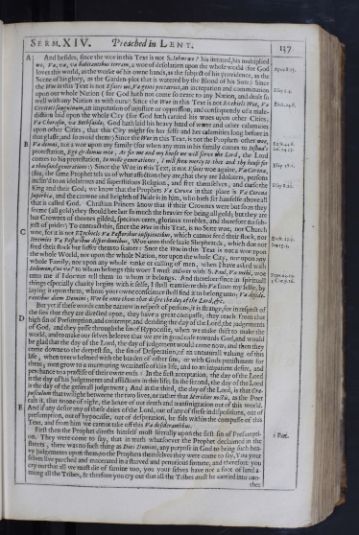 Serm. XIV.
Preached in Lent.
137
Serm. XIV.
Preached in Lent.
137
And besides, since the woe in this Text is not S. Iohns wo? his iterated, his multiplied
wo, Væ, væ, væ habitantibus terram,Apoc. 8.13. a woe of desolation upon the whole world (for God
loves this world, as the worke of his owne hands, as the subject of his providence, as the
Scene of his glory, as the Garden-plot that is watered by the Blood of his Son:) Since
the Woe in this Text is not Esaies wo, Væ genti peccatrici,Esay 1.4. an increpation and commination
upon our whole Nation (for God hath not come so neare to any Nation, and dealt so
well with any Nation as with ours:) Since the Woe in this Text is not Ezekiels Woe,Ezek. 24.6. Væ
Civitati sanguinum, an imputation of injustice or oppression, and consequently of a male-
diction laid upon the whole City (for God hath carried his woes upon other Cities,
Væ Chorasin, væ Bethsaida; God hath laid his heavy hand of warre and other calamities
upon other Cities, that this City might see her selfe and her calamities long before in
that glasse, and so avoid them:) Since the Woe in this Text, is not the Prophets other woe,Ezek. 44.6.
Væ domui, not a woe upon any family (for when any man in his family comes to Ioshua'sIos. 24.15.
protestation, Ego & domus mea, As for me and my house we will serve the Lord, the Lord
comes to his protestation, In mille generationes,Esay 28.1. I will shew mercy to thee and thy house for
a thousand generations:) Since the Woe in this Text, is not Esaies woe againe, Væ Coronæ,
(for, the same Prophet tels us of what affection they are, that they are Idolaters, persons
inclin'd to an idolatrous and superstitious Religion, and fret themselves, Esay 8.21. and curse the
King and their God; we know that the Prophets Væ Coronæ in that place is Væ Coronæ
superbiæ, and the crowne and heighth of Pride is in him, who hath set himselfe above all
that is called God. Christian Princes know that if their Crownes were but so as they
seeme (all gold) they should bee but so much the heavier for being all gold; but they are
but Crownes of thornes gilded, specious cares, glorious troubles, and therefore no sub-
ject of pride:) To contract this, since the Woe in this Text, is no State woe, nor Church
woe, for it is not Ezechiels Væ Pastoribus insipientibus, which cannot feed their flock, Ezek. 13.3. nor
Ier. 23.1. Ieremies Væ Pastoribus disperdentibus, Woe unto those lazie Shepheards, which doe not
feed their flock but suffer them to scatter: Sncesince the Woe in this Text is not a woe upon
the whole World, nor upon the whole Nation, nor upon the whole City, nor upon any
whole Family, nor upon any whole ranke or calling of men, when I have asked with
Solomon, Cui væ? to whom belongs this woe? I must answer with S. Paul, Væ mihi,Prov. 23.19. woe
1 Cor. 9.16. unto me if I doe not tell them to whom it belongs. And therefore since in spirituall
things especially charity begins with it selfe, I shall transferre this Væ from my selfe, by
laying it upon them, whom your owne conscience shall find it to belong unto; Væ deside-
rantibus diem Domini; Woe be unto them that desire the day of the Lord, &c. But yet if these words can be narrow in respect of persons, it is strange, for in respect of
the sins that they are directed upon, they have a great compasse; they reach from that
high sin of Presumption, and contempt, and deriding the day of the Lord, the judgements
of God, and they passe through the sin of Hypocrisie, when we make shift to make the
world, and to make our selves beleeve that we are in good case towards God, and would
be glad that the day of the Lord, the day of judgement would come now; and then they
come downe to the deepest sin, the sin of Desperation, of an unnaturall valuing of this
life, when overwhelmed with the burden of other sins, or with Gods punishment for
them; men grow to a murmuring wearinesse of this life, and to an impatient desire, and
perchance to a practise of their owne ends: In the first acceptation, the day of the Lord
is the day of his Judgements and afflictions in this life; In the second, the day of the Lord
is the day of the generall judgement; And in the third, the day of the Lord, is that Cre-
pusculum that twilight betweene the two lives, or rather that Meridies noctis, as the Poet
cals it, that noone of night, the houre of our death and transmigration out of this world.
And if any desire any of these daies of the Lord, out of any of these indispositions, out of
presumption, out of hypocrisie, out of desperation, he fals within the compasse of this
Text, and from him we cannot take off this Væ desiderantibus. First then the Prophet directs himself most literally upon the first sin of Presumpti-
on. They were come to say, 1 Part. that in truth whatsoever the Prophet declaimed in the
streets, there was no such thing as Dies Domini, any purpose in God to bring such hea-
vy judgements upon them; to the Prophets themselves they were come to say, You your
selves live parched and macerated in a starved and penurious fortune, and therefore you
cry out that all we must die of famine too, you your selves have not a foot of land a-
mong all the Tribes, & therfore you cry out that all the Tribes must be carried into ano-
ther
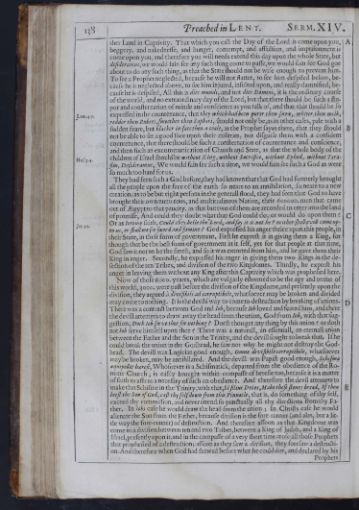 138
Preached in Lent.
Serm. XIV.
ther Land in Captivity. That which you call the Day of the Lord is come upon you,
138
Preached in Lent.
Serm. XIV.
ther Land in Captivity. That which you call the Day of the Lord is come upon you,
beggery, and nakednesse, and hunger, contempt, and affliction, and imprisonment is
come upon you, and therefore you will needs extend this day upon the whole State, but
desideramus, we would fain see any such thing come to passe, we would fain see God goe
about to do any such thing, as that the State should not be wise enough to prevent him.
To see a Prophet neglected, because he will not flatter, to see him despised below, be-
cause he is neglected above, to see him injured, insulted upon, and really damnified, be-
cause he is despised, All this is dies mundi, and not dies Domini, it is the ordinary course
of the world, and no extraordinary day of the Lord, but that there should be such a stu-
por and consternation of minde and conscience as you talk of, and that that should be so
expressed in the countenance, Lam. 4.7. that they which had been purer then snow, whiter then milk,
redder then Rubies, smoother then Saphirs, should not only be, as in other cases, pale with a
sudden feare, but blacker in face then a coale, as the Prophet sayes there, that they should
not be able to set a good face upon their miseries, nor disguise them with a confident
countenance, that there should be such a consternation of countenance and conscience,
and then such an excommunication of Church and State, as that the whole body of the
children of Israel should be without King,Hos. 3.4. without Sacrifice, without Ephod, without Tera-
fim, Desideramus, We would fain see such a time, we would fain see such a God as were
so much too hard for us. They had seen such a God before, they had known that that God had formerly brought
all the people upon the face of the earth so neare to an annihilation, so neare to a new
creation, as to be but eight persons in the generall flood, they had seen that God to have
brought their own numerous, and multitudinous Nation, their 600000. men that came
out of Ægypt to that paucity, as that but two of them are recorded to enter into the land
of promise, And could they doubt what that God could do, or would do upon them?
Or as Ieremy saith, Jer. 12. Could they belie the Lord, and say it is not he? neither shall evill come up-
on us, or shall we see sword and famine? God expressed his anger thrice upon this people, in
their State, in their form of government, First he exprest it in giving them a King, for
though that be the best form of government in it self, yet for that people at that time,
God saw it not to be the fittest, and so it was extorted from him, and he gave them their
King in anger. Secondly, he expressed his anger in giving them two Kings in the de-
section of the ten Tribes, and division of the two Kingdomes. Thirdly, he exprest his
anger in leaving them without any King after this Captivity which was prophesied here. Now of those 6000. yeares, which are vulgarly esteemed to be the age and terme of
this world, 3000. were past before the division of the Kingdome, and presently upon the
division, they argued à divisibili ad corruptibile, whatsoever may be broken and divided
may come to nothing. It is the devils way to come to destruction by breaking of unions.
There was a contract between God and Iob, because Iob loved and feared him, and there
the devill attempts to draw away the head from the union, God from Iob, with that sug-
gestion, Doth Iob serve thee for nothing? Doest thou get any thing by this union? or doth
not Iob serve himself upon thee? There was a naturall, an essentiall, an eternall union
between the Father and the Son in the Trinity, and the devill sought to break that. If he
could break the union in the Godhead, he saw not why he might not destroy the God-
head. The devill was Logician good enough, Omne divisibile corruptibile, whatsoever
may be broken, may be annihilated. And the devill was Papist good enough, Schisma
æquipollet hæresi, Whosoever is a Schismatick, departed from the obedience of the Ro-
mane Church, is easily brought within compasse of heresie too, because it is a matter
of faith to affirm a necessity of such an obedience. And therefore the devil attempts to
make that Schisme in the Trinity, with that, Si filius Deies, Make these stones bread, If thou
beest the Son of God, cast thy self down from this Pinnacle, that is, do something of thy self,
exceed thy commission, and never attend so punctually all thy directions from thy Fa-
ther. In Iobs case he would draw the head from the union; In Christs case he would
alienate the Son from the Father, because division is the fore-runner (and alas, but a lit-
tle way the fore-runner) of destruction. And therefore assoon as that Kingdome was
come to a division between ten and two Tribes, between a King of Judah, and a King of
Israel, presently upon it, and in the compasse of a very short time arose all those Prophets
that prophesied of a destruction; assoon as they saw a division, they foresaw a destructi-
on. And therefore when God had shewed before what he could doe, and declared by his Prophets
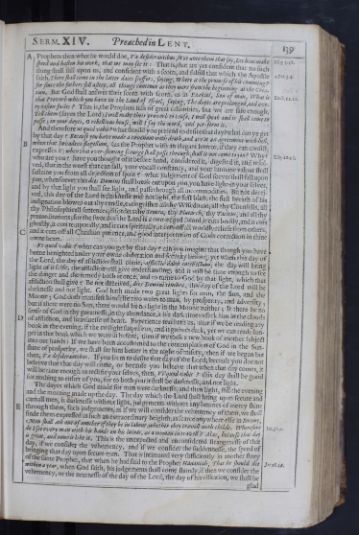 Serm. XIV.
Preached in Lent.
139
Prophets then what he would doe, Esay 5.18. Væ desiderantibus, Woe unto them that say, Let him make
Serm. XIV.
Preached in Lent.
139
Prophets then what he would doe, Esay 5.18. Væ desiderantibus, Woe unto them that say, Let him make
speed and hasten his work, that we may see it: That is, that are yet confident that no such
thing shall fall upon us, and confident with a scorn, 2 Pet. 3.4. and fulfill that which the Apostle
saith, There shall come in the latter daies scoffers, saying, Where is the promise of his comming?
for since the fathers fell asleep, all things continue as they were from the beginning at the Crea-
tion. But God shall answer their scorn with scorn, as in Ezekiel, Son of man,Ezek. 12.22. What is
that Proverb which you have in the Land of Israel, saying, The dayes are prolonged, and eve-
ry vision failes? That is, the Prophets talk of great calamities, but we are safe enough,
Tell them (sayes the Lord) I will make their proverb to cease, I will speak and it shall come to
passe; in your dayes, O rebellious house, will I say the word, and per-form it. And therefore ut quid vobis? what should you pretend to desire that day? what can ye get
by that day? Because you have made a covenant with death, and are at an agreement with hell,
when that Invadens flagellum, (as the Prophet with an elegant horror, if they can consist,
expresses it) when that over-flowing scourge shall passe through, shall it not come to you?Esay 20.15. Why?
who are you? have you thought of it before hand, considered it, digested it, and resol-
ved, that in the worst that can fall, your vocall constancy, and your humane valour shall
sustaine you from all dejection of spirit? what judgement of God soever shall fall upon
you, whensoever this dies Domini shall break out upon you, you have light in your selves,
and by that light you shall see light, and passe through all incommodities. Be not decei-
ved, this day of the Lord is darknesse and not light, the first blast, the first breath of his
indignation blowes out thy candle, extinguishes all thy Wisedome, all thy Counsells, all
thy Philosophicall sentences, disorders thy Seneca, thy Plutarch, thy Tacitus, and all thy
premeditations; for the sword of the Lord is a two-edged sword, it cuts bodily, and it cuts
ghostly, it cuts temporally, and it cuts spiritually, it cuts off all worldly reliefe from others,
and it cuts off all Christian patience, and good interpretation of Gods correction in thine
owne heart. Vt quid vobis? what can you get by that day? can you imagine that though you have
beene benighted under your owne obduration and security before, yet when this day of
the Lord, the day of affliction shall come, afflictio dabit intellectum, the day will bring
light of it selfe, the affliction will give understanding, and it will be time enough to see
the danger and the remedy both at once, and to turne to God by that light, which that
affliction shall give? Be not deceived, dies Domini tenebræ, this day of the Lord will be
darknesse and not light. God hath made two great lights for man, the Sun, and the
Moone; God doth manifest himselfe two waies to man, by prosperity, and adversity;
but if there were no Sun, there would be no light in the Moone neither; If there be no
sense of God in thy greatnesse, in thy abundance, it is a dark time to seek him in the clouds
of affliction, and heavinesse of heart. Experience teacheth us, that if we be reading any
book in the evening, if the twilight surprise us, and it growes dark, yet we can reade lon-
ger in that book which we were in before, then if we took a new book of another subject
into our hands: If we have been accustomed to the contemplation of God in the Sun-
shine of prosperity, we shall see him better in the night of misery, then if we began but
then, Væ desiderantibus. If you seem to desire that day of the Lord, because you doe not
beleeve that that day will come, or because you beleeve that when that day comes, it
will be time enough to rectifie your selves, then, Vt quod vobis? this day shall be good
for nothing to either of you, for to both you it shall be darknesse, and not light. The dayes which God made for man were darknesse, and then light, still the evening
and the morning made up the day. The day which the Lord shall bring upon secure and
carnall men, is darknesse without light, judgements without any beames of mercy shine
through them, such judgements, as if we will consider the vehemency of them, we shall
finde them expressed in such an extraordinary heighth, as scarce anywhere else in Ieremy,
Men shall ask one of another if they be in labour, whether they travell with childe.Ier. 30.7. Wherefore
do I see every man with his hands on his loines, as a woman in travell? Alas, because that day
is great, and none is like it. This is the unexpected and unconsidered strangenesse of that
day, if we consider the vehemency, and if we consider the suddennesse, the speed of
bringing that day upon secure man. That is intimated very sufficiently in another story
of the same Prophet, that when he had said to the Prophet Hananiah,Jer 28.16. That he should die
within a year, when God saith, his judgements shall come shortly, if then we consider the
vehemency, or the nearnesse of the day of the Lord, the day of his visitation, we shall be glad
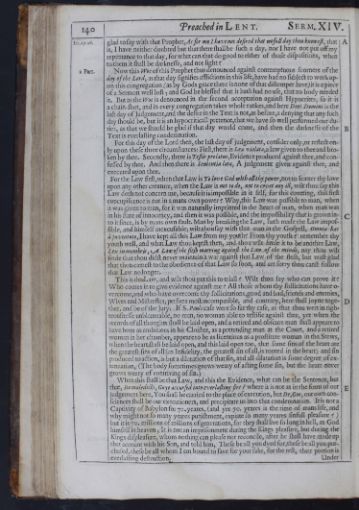 140
Preached in Lent.
Serm. XIV.
glad to say with that Prophet, Ier. 17.16. As for me I have not desired that wofull day thou knowest, that
140
Preached in Lent.
Serm. XIV.
glad to say with that Prophet, Ier. 17.16. As for me I have not desired that wofull day thou knowest, that
is, I have neither doubted but that there shall be such a day, nor I have not put off my
repentance to that day, for what can that do good to either of those dispositions, when
to them it shall be darknesse, and not light? 2 Part. Now this Woe of this Prophet thus denounced against contemptuous scorners of the
day of the Lord, as that day signifies afflictions in this life, have had no subject to work up-
on this congregation (as by Gods grace there is none of that distemper here) it is a piece
of a Sermon well lost; and God be blessed that it hath had no use, that no body needed
it. But as the Woe is denounced in the second acceptation against Hypocrites, so it is
a chain-shot, and in every congregation takes whole rankes, and here Dies Domini is the
last day of Judgement, and the desire in the Text is not, as before, a denying that any such
day should be, but it is an hypocriticall pretence, that we have so well performed our du-
ties, as that we should be glad if that day would come, and then the darknesse of the
Text is everlasting condemnation. For this day of the Lord then, the last day of judgement, consider only, or reflect on-
ly upon these three circumstances: First, there is Lex violata, a law given to thee and bro-
ken by thee. Secondly, there is Testis prolatus, Evidence produced against thee, and con-
fessed by thee. And then there is Sententia lata, A judgement given against thee, and
executed upon thee. For the Law first, when that Law is To love God with all thy power, not to scatter thy love
upon any other creature, when the Law is not to do, not to covet any ill, wilt thou say this
Law doth not concern me, because it is impossible in it self, for this coveting, this first
concupiscence is not in a mans own power? Why, this Law was possible to man, when
it was given to man, for it was naturally imprinted in the heart of man, when man was
in his state of innocency, and then it was possible, and the impossibility that is grown in-
to it since, is by mans own fault. Man by breaking the Law, hath made the Law impos-
sible, and himself inexcusable; wilt thou say with that man in the Gospell, Omnia hæc
à juventute, I have kept all this Law from my youth? From thy youth? remember thy
youth well, and what Law thou keptst then, and thou wilt finde it to be another Law,
Lex in membris, A Law of the flesh warring against the Law of the minde, nay thou wilt
finde that thou didst never maintain a war against that Law of the flesh, but wast glad
that thou camest to the obedience of that Law so soon, and art sorry thou canst follow
that Law no longer. This is the Law, and wilt thou put this to triall? Wilt thou say who can prove it?
Who comes in to give evidence against me? All those whom thy sollicitations have o-
vercome, and who have overcome thy sollicitations, good and bad, friends and enemies,
Wives and Mistresses, persons most incompatible, and contrary, here shall joyne toge-
ther, and be of the Jury. If S. Pauls case were so far thy case, as that thou wert in righ-
teousnesse unblameable, no man, no woman able to testifie against thee, yet when the
records of all thoughts shall be laid open, and a retired and obscure man shall appeare to
have been as ambitious in his Cloister, as a pretending man at the Court, and a retired
woman in her chamber, appeare to be as licentious as a prostitute woman in the Stews,
when the heart shall be laid open, and this laid open too, that some sins of the heart are
the greatest sins of all (as Infidelity, the greatest sin of all, is rooted in the heart) and sin
produced to action, is but a dilatation of that sin, and all dilatation is some degree of ex-
tenuation, (The body sometimes grows weary of acting some sin, but the heart never
grows weary of contriving of sin.) When this shall be that Law, and this the Evidence, what can be the Sentence, but
that, Ite maledicti, Go ye accursed into ever lasting fire? where it is not as in the form of our
judgement here, You shall be carried to the place of execution, but Ite, Goe, our own con-
sciences shall be our executioners, and precipitate us into that condemnation. It is not a
Captivity of Babylon for 70. yeares, (and yet 70. yeares is the time of mans life, and
why might not so many yeares punishment, expiate so many yeares sinfull pleasure?)
but it is 70. millions of millions of generations, for they shall live so long in hell, as God
himself in heaven; It is not an imprisonment during the Kings pleasure, but during the
Kings displeasure, whom nothing can please nor reconcile, after he shall have made up
that account with his Son, and told him, These be all you dyed for, these be all you pur-
chased, these be all whom I am bound to save for your sake, for the rest, their portion is
everlasting destruction. Under
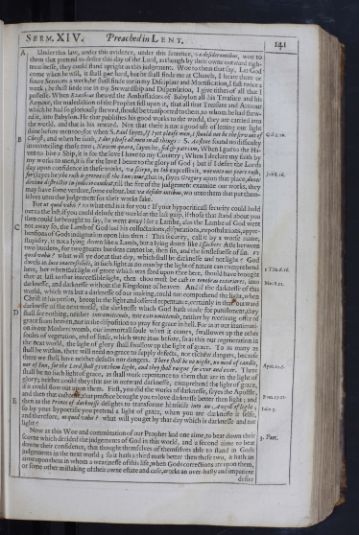 Serm. XIV.
Preached in Lent.
141
Serm. XIV.
Preached in Lent.
141
Under this law, under this evidence, under this sentence, væ desiderantibus, woe to
them that pretend to desire this day of the Lord, as though by their owne outward righ-
teousnesse, they could stand upright in this judgement. Woe to them that say, Let God
come when he will, it shall goe hard, but he shall finde me at Church, I heare three or
foure Sermons a week; he shall finde me in my Discipline and Mortification, I fast twice a
week; he shall finde me in my Stewardship and Dispensation, I give tithes of all that I
possesse. When Ezechias shewed the Ambassadors of Babylon all his Treasure and his
Armour, the malediction of the Prophet fell upon it, that all that Treasure and Armour
which he had so gloriously shewed, should be transported to them, to whom he had shew-
ed it, into Babylon. He that publishes his good works to the world, they are carried into
the world, and that is his reward. Not that there is not a good use of letting our light
shine before men too; for when S. Paul sayes, If I yet please men,Gal. 1.10. I should not be the servant of
Christ; and when he saith, I doe please all men in all things: S. Austine found no difficulty
in reconciling those two; Navem quæro, sayes he, sed & patriam, When I goe to the Ha-
ven to hire a Ship, it is for the love I have to my Country; When I declare my faith by
my works to men, it is for the love I beare to the glory of God; but if I desire the Lords
day upon confidence in these works, væ scirpo, as Iob expresses it, Job 8.16. woe unto me poore rush,
for (sayes he) the rush is greene till the Sun come, that is, sayes Gregory upon that place, donec
divina districtio in judicio candeat, till the fire of the judgement examine our works, they
may have some verdure, some colour, but væ desiderantibus, wo unto them that put them-
selves unto that judgement for their works sake. For ut quid vobis? to what end is it for you? If your hypocriticall security could hold
out to the last, if you could delude the world at the last gasp, if those that stand about you
then could be brought to say, he went away like a Lambe, alas the Lambe of God went
not away so, the Lamb of God had his colluctations, disputations, expostulations, appre-
hensions of Gods indignation upon him then: This security, call it by a worse name,
stupidity, is not a lying down like a Lamb, but a lying down like Issachers Asse between
two burdens, for two greater burdens cannot be, then sin, and the senslesnesse of sin. Vt
quid vobis? what will ye doe at that day, which shall be darknesse and not light? God
dwels in luce inaccessibili,1 Tim. 6.16. in such light as no man by the light of nature can comprehend
here, but when that light of grace which was shed upon thee here, should have brought
thee at last to that inaccessible light, then thou must be cast in tenebras exteriores,Mat. 8.12. into
darknesse, and darknesse without the Kingdome of heaven. And if the darknesse of this
world, which was but a darknesse of our making, could not comprehend the light, when
Christ in his person, brought the light and offered repentance, certainly in that outward
darknesse of the next world, the darknesse which God hath made for punishment, they
shall see nothing, neither intramittendo, nor extramittendo, neither by receiving offer of
grace from heaven, nor in the disposition to pray for grace in hell. For as at our inanimati-
on in our Mothers womb, our immortall soule when it comes, swallowes up the other
soules of vegetation, and of sense, which were in us before; so at this our regeneration in
the next world, the light of glory shall swallow up the light of grace. To as many as
shall be within, there will need no grace to supply defects, nor eschew dangers, because
there we shall have neither defects nor dangers. Apoc. 22.5. There shall be no night, no need of candle,
nor of Sun, for the Lord shall give them light, and they shall raigne for ever and ever. There
shall be no such light of grace, as shall work repentance to them that are in the light of
glory; neither could they that are in outward darknesse, comprehend the light of grace,
if it could flow out upon them. First, you did the works of darknesse, sayes the Apostle, Rom. 13.12.
and then that custome, that practice brought you to love darknesse better then light; and
then as the Prince of darknesse delights to transforme himselfe into an Angell of light;Iohn 3.
so by your hypocrisie you pretend a light of grace, when you are darknesse it selfe,
and therefore, ut quid vobis? what will you get by that day which is darknesse and not
light? Now as this Woe and commination of our Prophet had one aime, 3. Part. to beat down their
scorne which derided the judgements of God in this world, and a second aime to beat
downe their confidence, that thought themselves of themselves able to stand in Gods
judgements in the next world; so it hath a third mark better then these two, it hath an
aime upon them in whom a wearinesse of this life, when Gods corrections are upon them,
or some other mistaking of their owne estate and case, works an over-hasty and impatient desire
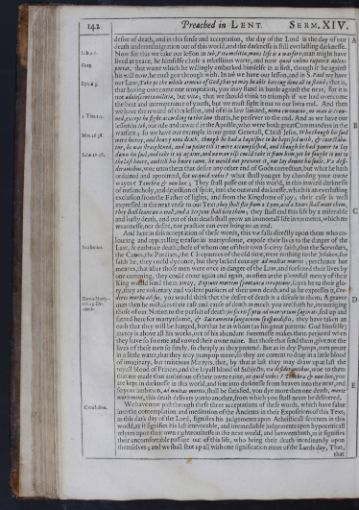 142
Preached in Lent.
Serm. XIV.
desire of death, and in this sense and acceptation, the day of the Lord is the day of our
142
Preached in Lent.
Serm. XIV.
desire of death, and in this sense and acceptation, the day of the Lord is the day of our
death and transmigration out of this world, and the darknesse is still everlasting darknesse.
Now for this we take our lesson in Iob,Iob. 7.1. Vita militia, mans life is a warfare; man might have
lived at peace, Greg. he himselfe chose a rebellious warre, and now quod volens expetiit nolens
portat, that warre which he willingly embarked himselfe in at first, though it be against
his will now, he must goe through with. In Iob we have our lesson, and in S. Paul we have
our Law, Eph. 6.313. Take ye the whole armour of God, that ye may be able having done all to stand; that is,
that having overcome one temptation, you may stand in battle against the next, for it is
not adoloscentia militia, but vita; that we should think to triumph if we had overcome
the heat and intemperance of youth, but we must fight it out to our lives end. And then
we have the reward of this lesson, and of this law limited, nemo coronatur, no man is crow-
ned, except he fight according to this law that is, 2 Tim. 2.5. he persever to the end. And as we have our
lesson in Iob, our rule and reward in the Apostle, who were both great Commanders in the
warfare;Mat. 26.38. so we have our example in our great Generall, Christ Jesus, Who though his soul
were heavy, and heavy unto death, though he had a baptisme to be baptised with, & coarctaba-
tur, he was straightned, and in paine till it were accomplished, and though he had power to lay
down his soul,Iohn 10.18. and take it up againe, and no man else could take it from him, yet he sought it out to
the last houre, and till his houre came, he would not prevent it, nor lay downe his soule. Væ desi-
derantibus, woe unto them that desire any other end of Gods correction, but what he hath
ordained and appointed, for ut quid vobis? what shall you get by choosing your owne
wayes? Tenebræ & non lux; They shall passe out of this world, in this inward darknesse
of melancholy, and dejection of spirit, into the outward darknesse, which is an everlasting
exclusion from the Father of lights, and from the Kingdome of joy; their case is well
expressed in the next verse to our Text, they shall flie from a Lyon, and a Beare shall meet them,
they shall leane on a wall, and a Serpent shall bite them; they shall end this life by a miserable
and hasty death, and out of that death shall grow an immortall life in torments, which no
wearinesse, nor desire, nor practice can ever bring to an end. And here in this acceptation of these words, this væ falls directly upon them who co-
louring and apparelling treason in martyrdome, expose their lives to the danger of the
Law, Scribanius. & embrace death; these of whom one of their own society saith, that the Scevolaes,
the CavesCato's, the Porciaes, the Cleopatraes of the old time, were nothing to the Jesuites, for
saith he, they could dye once, but they lacked courage ad multas mortes; perchance hee
meanes, that after those men were once in danger of the Law, and forfeited their lives by
one comming, they could come again and again, as often as the plentifull mercy of their
King would send them away, Rapiunt mortem spontanea irruptione, sayes he to their glo-
ry, they are voluntary and violent pursuers of their own death, and as he expresses it, Cre-
deres morbo adesos,Baron. Marty-
rol. 29. De-
cemb. you would think that the desire of death is a disease in them; A graver
man then he mistakes their case and cause of death as much, you are (saith he, incouraging
those of our Nation to the pursuit of death) in sacris septis ad martyrium saginati, fed up and
fatned here for martyrdome, & Sacramento sanguinem spospondistis, they have taken an
oath that they will be hanged, but that he in whom (as his great patterne God himselfe)
mercy is above all his works, out of his abundant sweetnesse makes them perjured when
they have so sworne and vowed their owne ruine. But those that send them, give not the
lives of these men so freely, so cheaply as they pretend. But as in dry Pumps, men poure
in a little water, that they may pump up more; so they are content to drop in a little blood
of imaginary, but traiterous Martyrs, that, by that at last they may draw up at last the
royall blood of Princes, and the loyall blood of Subjects; væ desiderantibus, woe to them
that are made thus ambitious of their owne ruine, ut quid vobis? Tenebræ & non lux, you
are kept in darknesse in this world, and sent into darknesse from heaven into the next, and
so your ambition, ad multas mortes, shall be satisfied, you dye more then one death, morte
moriemini, this death delivers you to another, from which you shall never be delivered. We have now past through these three acceptations of these words, Conclusion. which have falne
into the contemplation, and meditation of the Ancients in their Expositions of this Text;
as this dark day of the Lord, signifies his judgements upon Atheisticall scorners in this
world, as it signifies his last irrevocable, and irremediable judgements upon hypocriticall
relyers upon their own righteousnesse in the next world, and between both, as it signifies
their uncomfortable passage out of this life, who bring their death inordinately upon
themselves; and we shall shut up all with one signification more of the Lords day, That, that
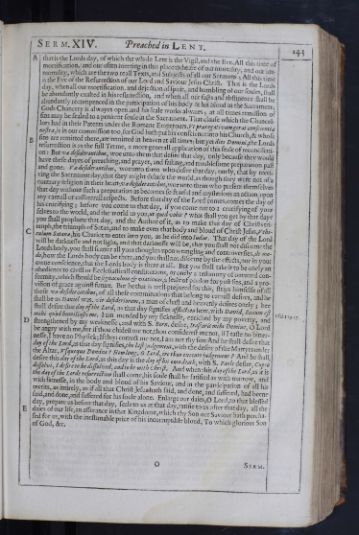 Serm. XIV.
Preached in Lent.
143
that is the Lords day, of which the whole Lent is the Vigil, and the Eve. All this time of
Serm. XIV.
Preached in Lent.
143
that is the Lords day, of which the whole Lent is the Vigil, and the Eve. All this time of
mortification, and our often meeting in this place to heare of our mortality, and our im-
mortality, which are the two reall Texts, and Subjects of all our Sermons; All this time
is the Eve of the Resurrection of our Lord and Saviour Jesus Christ. That is the Lords
day, when all our mortification, and dejection of spirit, and humbling of our soules, shall
be abundantly exalted in his resurrection, and when all our fasts and abstinence shall be
abundantly recompenced in the participation of his body & his bloud in the Sacrament;
Gods Chancery is alwayes open, and his seale works alwaies; at all times remission of
sins may be sealed to a penitent soule in the Sacrament. That clause which the Chancel-
lors had in their Patents under the Romane Emperours, Vt prærogativam gerat conscientiæ
nostræ, is in our commission too, for God hath put his conscience into his Church, & whose
sins are remitted there, are remitted in heaven at all times; but yet dies Domini, the Lords
resurrection is as the full Terme, a more generall application of this seale of reconciliati-
on: But væ desiderantibus, woe unto them that desire that day, only because they would
have these dayes of preaching, and prayer, and fasting, and trouble some preparation past
and gone. Væ desiderantibus, woe unto them who desire that day, onely, that by recei-
ving the Sacrament day, that they might delude the world, as though they were not of a
contrary religion in their heart; væ desiderantibus, woe unto them who present themselves
that day without such a preparation as becomes so fearful and mysterious an action, upon
any carnall or collaterall respects. Before that day of the Lord comes, comes the day of
his crucifying; before you come to that day, if you come not to a crucifying of your
selves to the world, and the world to you, ut quid vobis? what shall you get by that day?
you shall prophane that day, and the Author of it, as to make that day of Christs tri-
umph, the triumph of Satan, and to make even that body and bloud of Christ Jesus, Vehi-
culum Satanæ, his Chariot to enter into you, as he did into Iudas. That day of the Lord
will be darknesse and not light, and that darknesse will be, that you shall not discerne the
Lords body, you shall scatter all your thoughts upon wrangling and controversies, de mo-
do, how the Lords body can be there, and you shall not discerne by the effects, nor in your
owne conscience, that the Lords body is there at all. But you shall take it to be onely an
obedience to civill or Ecclesiasticall constitutions, or onely a testimony of outward con-
formity, which should be signaculum & viaticum, a seale of pardon for past sins, and a pro-
vision of grace against future. But he that is well prepared for this, strips himselfe of all
these væ desiderantibus, of all these comminations that belong to carnall desires, and he
shall be as Daniel was, vir desideriorum, a man of chast and heavenly desires onely; hee
shall desire that day of the Lord, as that day signifies affliction here, with David,Psal. 119.17. Bonum est
mihi quòd humiliasti me, I am mended by my sicknesse, enriched by my poverty, and
strengthened by my weaknesse; and with S. Bern. desire, Irascaris mihi Domine, O Lord
be angry with me, for if thou chidest me not, thou considerest me not, if I taste no bitter-
nesse, I have no Physick; If thou correct me not, I am not thy son: And he shall desire that
day of the Lord, as that day signifies, the last judgement, with the desire of the Martyrs under
the Altar, Vsquequo Domine? How long, O Lord, ere thou execute judgement? And he shall
desire this day of the Lord, as this day is the day of his own death, with S. Pauls desire, Cupio
dissolvi, I desire to be dissolved, and to be with Christ. And when this day of the Lord, as it is
the day of the Lords resurrection shall come, his soule shall be satified as with marrow, and
with fatnesse, in the body and bloud of his Saviour, and in the participation of all his
merits, as intirely, as if all that Christ Jesus hath said, and done, and suffered, had beene
said, and done, and suffered for his soule alone. Enlarge our daies, O Lord, to that blessed
day, prepare us before that day, seale to us at that day, ratifie to us after that day, all the
daies of our life, an assurance in that Kingdome, which thy Son our Saviour hath purcha-
sed for us, with the inestimable price of his incorruptible bloud, To which glorious Son
of God, &c. O Serm.
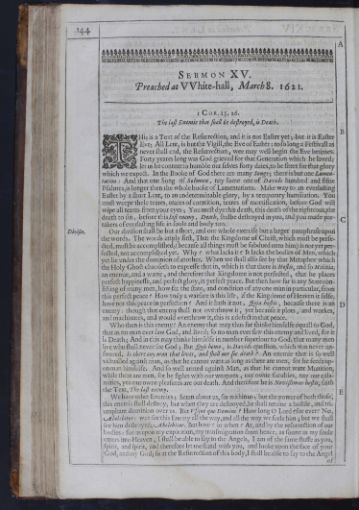 144
144
Sermon XV.
Preached at VVhite-hallWhite-hall, March 8. 1621.
1 Cor. 15.26.
The last Enemie that shall be destroyed, is Death. THisThis is a Text of the Resurrection, and it is not Easter yet; but it is Easter
Eve; All Lent, is but the Vigill, the Eve of Easter: to so long a Festivall as
never shall end, the Resurrection, wee may well begin the Eve betimes.
Forty yeares long was God grieved for that Generation which he loved;
let us be content to humble our selves forty daies, to be fitter for that glory
which we expect. In the Booke of God there are many Songs; there is but one Lamen-
tation: And that one Song of Solomon, nay some one of Davids hundred and fiftie
Psalmes, is longer then the whole booke of Lamentations. Make way to an everlasting
Easter by a short Lent, to an undeterminable glory, by a temporary humiliation. You
must weepe these teares, teares of contrition, teares of mortification, before God will
wipe all teares from your eyes; You must dye this death, this death of the righteous, the
death to sin, before this last enemy, Death, shalbe destroyed in you, and you made par-
takers of everlasting life in soule and body too. Divisio. Our division shall be but a short, and our whole exercise but a larger paraphrase upon
the words. The words imply first, That the Kingdome of Christ, which must be perfe-
cted, must be accomplished, (because all things must be subdued unto him) is not yet per-
fected, not accomplished yet. Why? what lacks it? It lacks the bodies of Men, which
yet lie under the dominion of another. When we shall also see by that Metaphor which
the Holy Ghost chooseth to expresse that in, which is that there is Hostis, and so Militia,
an enemie, and a warre, and therefore that Kingdome is not perfected, that he places
perfect happinesse, and perfect glory, in perfect peace. But then how far is any State con-
sisting of many men, how far the state, and condition of any one man in particular, from
this perfect peace? How truly a warfare is this life, if the Kingdome of Heaven it selfe,
have not this peace in perfection? And it hath it not, Quia hostis, because there is an
enemy: though that enemy shall not overthrow it, yet because it plots, and workes,
and machinates, and would overthrow it, this is a defect in that peace. Who then is this enemy? An enemy that may thus far thinke himselfe equall to God,
that as no man ever saw God, and lived; so no man ever saw this enemy and lived, for it
is Death; And in this may thinke himselfe in number superiour to God, that many men
live who shall never see God; But Quis homo, is Davids question, which was never an-
swered, Is there any man that lives, and shall not see death? An enemie that is so well
victualled against man, as that he cannot want as long as there are men, for he feeds up-
on man himselfe. And so well armed against Man, as that he cannot want Munition,
while there are men, for he fights with our weapons, our owne faculties, nay our cala-
mities, yea our owne pleasures are our death. And therefore he is Novissimus hostis, saith
the Text, The last enemy. We have other Enemies; Satan about us, sin within us; but the power of both those,
this enemie shall destroy; but when they are destroyed, he shall retaine a hostile, and tri-
umphant dominion over us. But Vsque quo Domine? How long O Lord? for ever? No,
Abolebitur: wee see this Enemy all the way, and all the way we feele him; but we shall
see him destroyed; Abolebitur. But how? or when? At, and by the resurrection of our
bodies: for as upon my expiration, my transmigration from hence, as soone as my soule
enters into Heaven, I shall be able to say to the Angels, I am of the same stuffe as you,
spirit, and spirit, and therefore let me stand with you, and looke upon the face of your
God, and my God; so at the Resurrection of this body, I shall be able to say to the Angel of
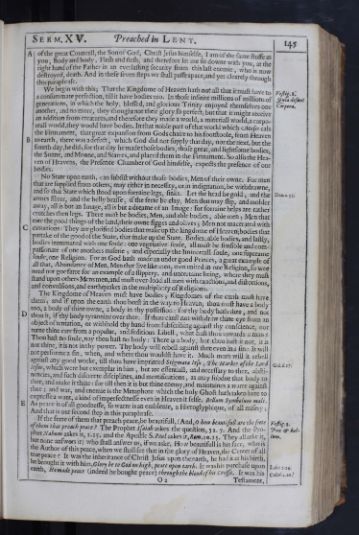 Serm. XV.
Preached in Lent.
145
of the great Councell, the Son of God, Christ Jesus himselfe, I am of the same stuffe as
Serm. XV.
Preached in Lent.
145
of the great Councell, the Son of God, Christ Jesus himselfe, I am of the same stuffe as
you, Body and body, Flesh and flesh, and therefore let me sit downe with you, at the
right hand of the Father in an everlasting security from this last enemie, who is now
destroyed, death. And in these seven steps we shall passe apace, and yet cleerely through
this paraphrase. We begin with this; That the Kingdome of Heaven hath not all that it must have to Vestig. I.
Quia desunt
Corpora.
a consummate perfection, till it have bodies too. In those infinite millions of millions of
generations, in which the holy, blessed, and glorious Trinity enjoyed themselves one
another, and no more, they thought not their glory so perfect, but that it might receive
an addition from creatures; and therefore they made a world, a materiall world, a corpo-
reall world, they would have bodies. In that noble part of that world which Moses cals
the Firmament, that great expansion from Gods chaire to his footstoole, from Heaven
to earth, there was a defect, which God did not supply that day, nor the next, but the
fourth day, he did; for that day he made those bodies, those great, and lightsome bodies,
the Sunne, and Moone, and Starres, and placed them in the Firmament. So also the Hea-
ven of Heavens, the Presence Chamber of God himselfe, expects the presence of our
bodies. No State upon earth, can subsist without those bodies, Men of their owne. For men
that are supplied from others, may either in necessity, or in indignation, be withdrawne,
and so that State which stood upon forraine legs, sinks. Let the head be gold, and the Dan. 2.31.
armes silver, and the belly brasse, if the feete be clay, Men that may slip, and molder
away, all is but an Image, all is but a dreame of an Image: for forraine helps are rather
crutches then legs. There must be bodies, Men, and able bodies, able men; Men that
eate the good things of the land, their owne figges and olives; Men not macerated with
extortions: They are glorified bodies that make up the kingdome of Heaven; bodies that
partake of the good of the State, that make up the State. Bodies, able bodies, and lastly,
bodies inanimated with one soule: one vegetative soule, all must be sensible and com-
passionate of one anothers miserie; and especially the Immortall soule, one supreame
soule, one Religion. For as God hath made us under good Princes, a great example of
all that, Abundance of Men, Men that live like men, men united in one Religion, so wee
need not goe farre for an example of a slippery, and uncertaine being, where they must
stand upon others Mens men, and must over-load all men with exactions, and distortions,
and convulsions, and earthquakes in the multiplicity of Religions. The Kingdome of Heaven must have bodies; Kingdomes of the earth must have
them; and if upon the earth thou beest in the way to Heaven, thou must have a body
too, a body of thine owne, a body in thy possession: for thy body hath thee, and not
thou it, if thy body tyrannize over thee. If thou canst not withdraw thine eye from an
object of tentation, or withhold thy hand from subscribing against thy conscience, nor
turne thine eare from a popular, and seditious Libell, what hast thou towards a man?
Thou hast no soule, nay thou hast no body: There is a body, but thou hast it not, it is
not thine, it is not in thy power. Thy body will rebell against thee even in a sin: It will
not performe a sin, when, and where thou wouldst have it. Much more will it rebell
against any good worke, till thou have imprinted Stigmata Iesu, The Markes of the Lord Gal. 6.17.
Iesus, which were but exemplar in him, but are essentiall, and necessary to thee, absti-
nencies, and such discreete disciplines, and mortifications, as may subdue that body to
thee, and make it thine: for till then it is but thine enemy, and maintaines a warre against
thee; and war, and enemie is the Metaphore which the holy Ghost hath taken here to
expresse a want, a kind of imperfectnesse even in Heaven it selfe. Bellum Symbolum mali.
As peace is of all goodnesse, so warre is an embleme, a Hieroglyphique, of all misery;
And that is our second step in this paraphrase. If the feete of them that preach peace, be beautifull, (And, O how beautifull are the feete Vestig. 2.
Pax & bel-
lum.
of them that preach peace? The Prophet Isaiah askes the question, 52.7. And the Pro-
phet Nahum askes it, 1.15. and the Apostle S. Paul askes it, Rom. 10.15. They all aske it,
but none answers it) who shall answer us, if we aske, How beautifull is his face, who is
the Author of this peace, when we shall see that in the glory of Heaven, the Center of all
true peace? It was the inheritance of Christ Jesus upon the earth, he had it at his birth,
he brought it with him, Glory be to God on high, peace upon earth.Luke 2.14. It was his purchase upon
earth, He made peace (indeed he bought peace) Colos. 1.20. through the blood of his Crosse. It was his O2Testament,
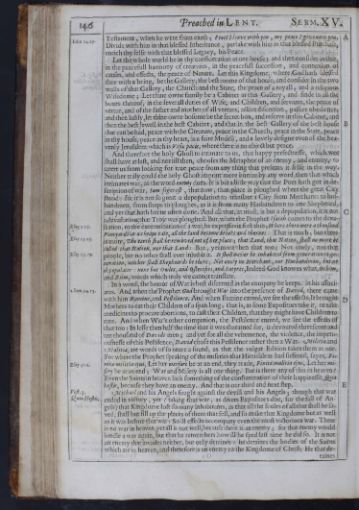 146
Preached in Lent.
Serm. XV.
Testament, when he went from earth; Iohn 14.27. Peace I leave with you, my peace I give unto you.
146
Preached in Lent.
Serm. XV.
Testament, when he went from earth; Iohn 14.27. Peace I leave with you, my peace I give unto you.
Divide with him in that blessed Inheritance, partake with him in that blessed Purchase,
enrich thy selfe with that blessed Legacy, his Peace.
Let the whole world be in thy consideration as one house; and then consider in that,
in the peacefull harmony of creatures, in the peacefull succession, and connexion of
causes, and effects, the peace of Nature. Let this Kingdome, where God hath blessed
thee with a being, be the Gallery, the best roome of that house, and consider in the two
walls of that Gallery, the Church and the State, the peace of a royall, and a religious
Wisedome; Let thine owne family be a Cabinet in this Gallery, and finde in all the
boxes thereof, in the severall duties of Wife, and Children, and servants, the peace of
vertue, and of the father and mother of all vertues, active discretion, passive obedience;
and then lastly, let thine owne bosome be the secret box, and reserve in this Cabinet, and
then the best Jewell in the best Cabinet, and that in the best Gallery of the best house
that can be had, peace with the Creature, peace in the Church, peace in the State, peace
in thy house, peace in thy heart, is a faire Modell, and a lovely designe even of the hea-
venly Jerusalem which is Visio pacis, where there is no object but peace.
And therefore the holy Ghost to intimate to us, that happy perfectnesse, which wee
shall have at last, and not till then, chooses the Metaphor of an enemy, and enmity, to
avert us from looking for true peace from any thing that presents it selfe in the way.
Neither truly could the holy Ghost imprint more horror by any word, then that which
intimates war, as the word enemy does. It is but a little way that the Poet hath got in de-
scription of war, Iam seges est, that now, that place is ploughed where the great City
stood: for it is not so great a depopulation to translate a City from Merchants to hus-
bandmen, from shops to ploughes, as it is from many Husbandmen to one Shepheard,
and yet that hath beene often done. And all that, at most, is but a depopulation, it is not
a devastation, that Troy was ploughed. But, when the Prophet Isaiah comes to the deva-
station, to the extermination of a war, he expresses it first thus; Esay 7.23. Where there were a thousand
Vineyards at a cheape rate, all the land become briars and thornes: That is much; but there
is more, Esay 13.13. The earth shall be removed out of her place; that Land, that Nation, shall no more be
called that Nation, nor that Land: But, yet more then that too; Not onely, not that
people, but no other shall ever inhabit it. Esay 13.19. It shall never be inhabited from generation to ge-
neration, neither shall Shepheards be there; Not onely no Merchant, nor Husbandman, but no
depopulator: none but Owles, and Ostriches, and Satyres, Indeed God knowes what, Ochim,
and Ziim, words which truly we cannot translate.
In a word, the horror of War is best discerned in the company he keeps, in his associ-
ates. 2 Sam. 24.13. And when the Prophet Gad brought War into the presence of David, there came
with him Famine, and Pestilence. And when Famine entred, we see the effects; It brought
Mothers to eat their Children of a span long; that is, as some Expositors take it, to take
medicines to procure abortions, to cast their Children, that they might have Children to
eate. And when War's other companion, the Pestilence entred, we see the effects of
that too: In lesse then half the time that it was threatned for, it devoured threescore and
ten thousand of Davids men; and yet for all the vehemence, the violence, the impetu-
ousnesse of this Pestilence, David chose this Pestilence rather then a War. Militia and
Malitia, are words of so neare a sound, as that the vulgat Edition takes them as one.
For where the Prophet speaking of the miseries that Hierusalem had suffered, sayes, Fi-
nita militia ejus, Esay 42.2. Let her warfare be at an end, they reade, Finita malitia ejus, Let her mi-
sery be at an end; War and Misery is all one thing. But is there any of this in heaven?
Even the Saints in heaven lack something of the consummation of their happinesse, Quia
hostis, because they have an enemy. And that is our third and next step.
Vest. 3.
Quia Hostis. Michael and his Angels fought against the devill and his Angels; though that war
ended in victory, yet (taking that war, as divers Expositors doe, for the fall of An-
gels) that Kingdome lost so many inhabitants, as that all the soules of all that shall be sa-
ved, shall but fill up the places of them that fell, and so make that Kingdome but as well
as it was before that war: So ill effects accompany even the most victorious war. There
is no war in heaven, yet all is not well, because there is an enemy; for that enemy would
kindle a war again, but that he remembers how ill he sped last time he did so. It is not
an enemy that invades neither, but only detaines: he detaines the bodies of the Saints
which are in heaven, and therefore is an enemy to the Kingdome of Christ; He that de-
taines
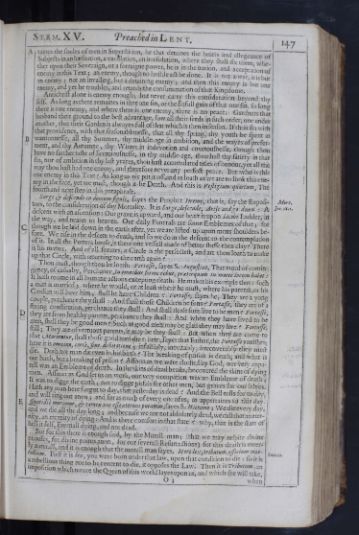 Serm. XV.
Preached in Lent.
147
taines the soules of men in Superstition, he that detaines the hearts and allegeance of
Serm. XV.
Preached in Lent.
147
taines the soules of men in Superstition, he that detaines the hearts and allegeance of
Subjects in an hæsitation, a vacillation, an irresolution, where they shall fix them, whe-
ther upon their Soveraign, or a forraigne power, he is in the notion, and acceptation of
enemy in this Text; an enemy, though no hostile act be done. It is not a war, it is but
an enemy; not an invading, but a detaining enemy; and then this enemy is but one
enemy, and yet he troubles, and retards the consummation of that Kingdome. Antichrist alone is enemy enough; but never carry this consideration beyond thy
self. As long as there remaines in thee one sin, or the sinfull gain of that one sin, so long
there is one enemy, and where there is one enemy, there is no peace. Gardners that
husband their ground to the best advantage, sow all their seeds in such order, one under
another, that their Garden is alwayes full of that which is then in season. If thou sin with
that providence, with that seasonablenesse, that all thy spring, thy youth be spent in
wantonnesse, all thy Summer, thy middle-age in ambition, and the wayes of prefer-
ment, and thy Autumne, thy Winter in indevotion and covetousnesse, though thou
have no farther taste of licentiousnesse, in thy middle-age, thou hast thy satiety in that
sin, nor of ambition in thy last yeares, thou hast accumulated titles of honour, yet all the
way thou hast had one enemy, and therefore never any perfect peace. But who is this
one enemy in this Text? As long as we put it off, and as loath as we are to look this ene-
my in the face, yet we must, though it be Death. And this is Vestigium quartum, The
fourth and next step in this paraphrase. Surge & descende in domum figuli, sayes the Prophet Ieremy, Mors.
Jer. 18.2. that is, say the Exposi-
tors, to the consideration of thy Mortality. It is Surge, descende, Arise and go down: A
descent with an ascension: Our grave is upward, and our heart is upon Iacobs Ladder, in
the way, and nearer to heaven. Our daily Funerals are some Emblemes of that; for
though we be laid down in the earth after, yet we are lifted up upon mens shoulders be-
fore. We rise in the descent to death, and so we do in the descent to the contemplation
of it. In all the Potters house, is there one vessell made of better stuffe then clay? There
is his matter. And of all formes, a Circle is the perfectest, and art thou loath to make
up that Circle, with returning to the earth again? Thou must, though thou be loath. Fortasse, sayes S. Augustine, That word of contin-
gency, of casualty, Perchance, In omnibus ferme rebus, præterquam in morte locum habet:
It hath roome in all humane actions excepting death. He makes his example thus: such
a man is married; where he would, or at least where he must, where his parents, or his
Gardian will have him; shall he have Children? Fortasse, sayes he, They are a yong
couple, perchance they shall: And shall those Children be sons? Fortasse, they are of a
strong constitution, perchance they shall: And shall those sons live to be men? Fortasse,
they are from healthy parents, perchance they shall: And when they have lived to be
men, shall they be good men? Such as good men may be glad they may live? Fortasse,
still; They are of vertuous parents, it may be they shall: But when they are come to
that Morientur, shall those good men die? here, sayes that Father, the Fortasse vanishes;
here it is omnino, certè, sine dubitatione; infallibly, inevitably, irrecoverably they must
die. Doth not man die even in his birth? The breaking of prison is death, and what is
our birth, but a breaking of prison? Assoon as we were clothed by God, our very appa-
rell was an Embleme of death. In the skins of dead beasts, he covered the skins of dying
men. Assoon as God set us on work, our very occupation was an Embleme of death;
It was to digge the earth; not to digge pitfals for other men, but graves for our selves.
Hath any man here forgot to day, that yesterday is dead? And the Bell tolls for to day,
and will ring out anon; and for as much of every one of us, as appertaines to this day.
Quotidiè morimur, & tamen nos esse æternos putamus, sayes S. Hierome; We die every day,
and we die all the day long; and because we are not absolutely dead, we call that an eter-
nity, an eternity of dying: And is there comfort in that state? why, that is the state of
hell it self, Eternall dying, and not dead. But for this there is enough said, by the Morall man; (that we may respite divine
proofes, for divine points anon, for our severall Resurrections) for this death is meer-
ly naturall, and it is enough that the morall man sayes, Seneca. Mors lex, tributum, officium mor-
talium. First it is lex, you were born under that law, upon that condition to die: so it is
a rebellious thing not to be content to die, it opposes the Law. Then it is Tributum, an
imposition which nature the Queen of this world layes upon us, and which she will take, O3 when
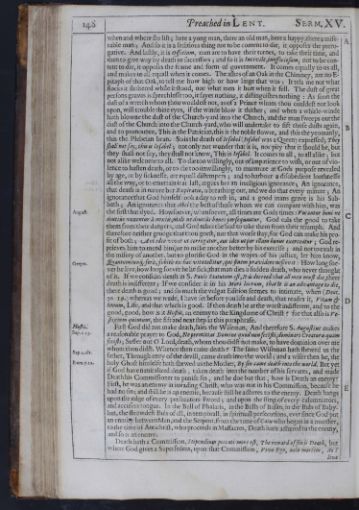 148
Preached in Lent.
Serm. XV.
when and where she lift; here a yong man, there an old man, here a happy, there a mise-
148
Preached in Lent.
Serm. XV.
when and where she lift; here a yong man, there an old man, here a happy, there a mise-rable man; And so it is a seditious thing not to be content to die, it opposes the prero-
gative. And lastly, it is Officium, men are to have their turnes, to take their time, and
then to give way by death to successors; and so it is Incivile, inofficiosum, not to be con-
tent to die, it opposes the frame and form of government. It comes equally to us all,
and makes us all equall when it comes. The ashes of an Oak in the Chimney, are no E-
pitaph of that Oak, to tell me how high or how large that was; It tels me not what
flocks it sheltered while it stood, nor what men it hurt when it fell. The dust of great
persons graves is speechlesse too, it sayes nothing, it distinguishes nothing: As soon the
dust of a wretch whom thou wouldest not, as of a Prince whom thou couldest not look
upon, will trouble thine eyes, if the winde blow it thither; and when a whirle-winde
hath blowne the dust of the Church-yard into the Church, and the man sweeps out the
dust of the Church into the Church-yard, who will undertake to sift those dusts again,
and to pronounce, This is the Patrician, this is the noble flowre, and this the yeomanly,
this the Plebeian bran. So is the death of Iesabel (Iesabel was a Queen) expressed; They
shall not say, this is Iesabel; not only not wonder that it is, nor pity that it should be, but
they shall not say, they shall not know, This is Iesabel. It comes to all, to all alike; but
not alike welcome to all. To die too willingly, out of impatience to wish, or out of vio-
lence to hasten death, or to die too unwillingly, to murmure at Gods purpose revealed
by age, or by sicknesse, are equall distempers; and to harbour a disobedient loathnesse
all the way, or to entertain it at last, argues but an irreligious ignorance; An ignorance,
that death is in nature but Expiratio, a breathing out, and we do that every minute; An
ignorance that God himself took a day to rest in, and a good mans grave is his Sab-
bath; An ignorance that Abel the best of those whom we can compare with him, was
the first that dyed. Howsoever, whensoever, all times are Gods times: August. Vocantur boni ne
diutiùs vexentur à noxiis, mali ne diutiùs bonos persequantur, God cals the good to take
them from their dangers, and God takes the bad to take them from their triumph. And
therefore neither grudge that thou goest, nor that worse stay, for God can make his pro-
fit of both; Aut ideo vivit ut corrigatur, aut ideo ut per illum bonus exerceatur; God re-
prieves him to mend him, or to make another better by his exercise; and not to exult in
the misery of another, but to glorifie God in the wayes of his justice, let him know,
Gregor. Quantumcun serò, subitò ex hac vita tollitur, qui finem prævidere nescivit: How long soe-
ver he live, how long soever he lie sick, that man dies a sudden death, who never thought
of it. If we consider death in S. Pauls Statutum est, It is decreed that all men must die, there
death is indifferent; If we consider it in his Mori lucrum, that is an advantage to die,
there death is good; and so much the vulgat Edition seemes to intimate, when (Deut.
30 19.30.19) whereas we reade, I have set before you life and death, that reades it, Vitam &
bonum, Life, and that which is good. If then death be at the worst indifferent, and to the
good, good, how is it Hostis, an enemy to the Kingdome of Christ? for that also is Ve-
stigium quintum, the fift and next step in this paraphrase.
Hostis. First God did not make death, saies the Wiseman, And therefore S. Augustine makes
a reasonable prayer to God, Sap. 1.13 Ne permittas Domine quod non fecisti, dominari Creaturæ quam
fecisti; Suffer not O Lord, death, whom thou didst not make, to have dominion over me
whom thou didst. Whence then came death? Sap. 2. ult. The same Wiseman hath shewed us the
father, Through envy of the devill, came death into the world; and a wiser then he, the
holy Ghost himselfe hath shewed us the Mother, Rom. 5.12. By sin came death into the world. But yet
if God have naturalized death, taken death into the number of his servants, and made
Death his Commissioner to punish sin, and he doe but that, how is Death an enemy?
First, he was an enemy in invading Christ, who was not in his Commission, because he
had no sin; and still he is an enemie, because still he adheres to the enemy. Death hangs
upon the edge of every persecutors sword; and upon the sting of every calumniators,
and accusers tongue. In the Bull of Phalaris, in the Bulls of Basan, in the Buls of Baby-
lon, the shrewdest Buls of all, in temporall, in spirituall persecutions, ever since God put
an enmity between Man, and the Serpent, from the time of Cain who began in a murther,
to the time of Antichrist, who proceeds in Massacres, Death hath adhered to the enemy,
and so is an enemy. Death hath a Commission, Stipendium peccati mors est, The reward of sin is Death, but
where God gives a Supersedeas, upon that Commission, Vivo Ego, nolo mortem, As I live
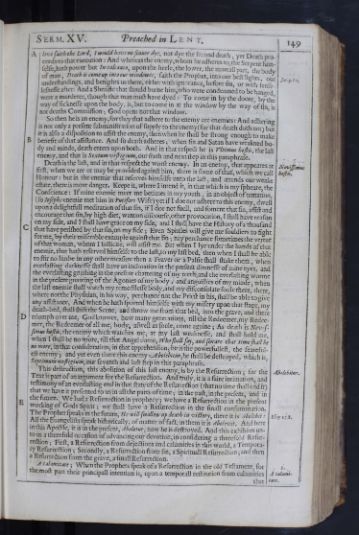 Serm. XV.
Preached in Lent.
149
live saith the Lord, I would have no sinner dye, not dye the second death, yet Death pro-
Serm. XV.
Preached in Lent.
149
live saith the Lord, I would have no sinner dye, not dye the second death, yet Death pro-ceeds to that execution: And whereas the enemy, whom he adheres to, the Serpent him-
selfe, hath power but In calcaneo, upon the heele, the lower, the mortall part, the body
of man, Jer. 9.21. Death is come up into our windowes, saith the Prophet, into our best lights, our
understandings, and benights us there, either with ignorance, before sin, or with sense-
lesnesse after: And a Sheriffe that should burne him, who were condemned to be hanged,
were a murderer, though that man must have dyed: To come in by the doore, by the
way of sicknesse upon the body, is, but to come in at the window by the way of sin, is
not deaths Commission; God opens not that window. So then he is an enemy, for they that adhere to the enemy are enemies: And adhering
is not only a present subministration of supply to the enemy (for that death doth not) but
it is also a disposition to assist the enemy, then when he shall be strong enough to make
benefit of that assistance. And so death adheres; when sin and Satan have weakned bo-
dy and minde, death enters upon both. And in that respect he is Vltimus hostis, the last
enemy, and that is Sextum vestigium, our sixth and next step in this paraphrase. Novissimus
hostis. Death is the last, and in that respect the worst enemy. In an enemy, that appeares at
first, when we are or may be provided against him, there is some of that, which we call
Honour: but in the enemie that reserves himselfe unto the last, and attends our weake
estate, there is more danger. Keepe it, where I intend it, in that which is my spheare, the
Conscience: If mine enemie meet me betimes in my youth, in an object of tentation,
(so Iosephs enemie met him in Putifars Wife) yet if I doe not adhere to this enemy, dwell
upon a delightfull meditation of that sin, if I doe not fuell, and foment that sin, assist and
encourage that sin, by high diet, wanton discourse, other provocation, I shall have reason
on my side, and I shall have grace on my side, and I shall have the History of a thousand
that have perished by that sin, on my side; Even Spittles will give me souldiers to fight
for me, by their miserable example against that sin; nay perchance sometimes the vertue
of that woman, whom I sollicite, will assist me. But when I lye under the hands of that
enemie, that hath reserved himselfe to the last, to my last bed, then when I shall be able
to stir no limbe in any other measure then a Feaver or a Palsie shall shake them, when
everlasting darknesse shall have an inchoation in the present dimnesse of mine eyes, and
the everlasting gnashing in the present chattering of my teeth, and the everlasting worme
in the present gnawing of the Agonies of my body, and anguishes of my minde, when
the last enemie shall watch my remedilesse body, and my disconsolate soule there, there,
where not the Physitian, in his way, perchance not the Priest in his, shall be able to give
any assistance, And when he hath sported himselfe with my misery upon that stage, my
death-bed, shall shift the Scene, and throw me from that bed, into the grave, and there
triumph over me, God knowes, how many generations, till the Redeemer, my Redee-
mer, the Redeemer of all me, body, aswell as soule, come againe; As death is Novis-
simus hostis, the enemy which watches me, at my last weaknesse, and shall hold me,
when I shall be no more, till that Angel come, Who shall say, and sweare that time shall be
no more, in that consideration, in that apprehension, he is the powerfullest, the feareful-
est enemy; and yet even there this enemy Abolebitur, he shall be destroyed, which is,
Septimum vestigium, our seventh and last step in this paraphrase. Abolebitur. This destruction, this abolition of this last enemy, is by the Resurrection; for the
Text is part of an argument for the Resurrection. And truly, it is a faire intimation, and
testimony of an everlasting end in that state of the Resurrection (that no time shall end it)
that we have it presented to us in all the parts of time; in the past, in the present, and in
the future. We had a Resurrection in prophecy; we have a Resurrection in the present
working of Gods Sprit; we shall have a Resurrection in the finall consummation.
The Prophet speaks in the future, Esay 25.8. He will swallow up death in victory, there it is Abolebit:
All the Euangelists speak historically, of matter of fact, in them it is Abolevit. And here
in this Apostle, it is in the present, Aboletur, now he is destroyed. And this exhibites un-
to us a threefold occasion of advancing our devotion, in considering a threefold Resur-
rection; First, a Resurrection from dejections and calamities in this world, a Tempora-
ry Resurrection; Secondly, a Resurrection from sin, a Spirituall Resurrection; and then
a Resurrection from the grave, a finall Resurrection. 1.
A calami-
tate. A calamitate; When the Prophets speak of a Resurrection in the old Testament, for
the most part their principall intention is, upon a temporall restitution from calamities that
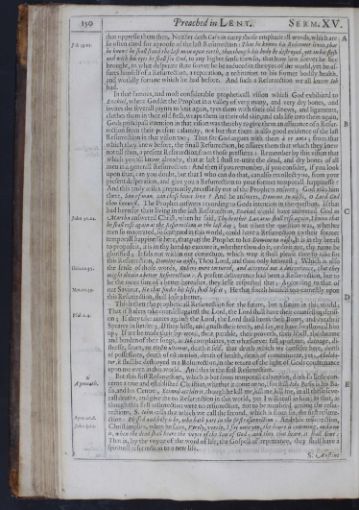 150
Preached in Lent.
Serm. XV.that oppresse them then. Neither doth Calvin carry those emphaticall words, which are
150
Preached in Lent.
Serm. XV.that oppresse them then. Neither doth Calvin carry those emphaticall words, which are
so often cited for a proofe of the last Resurrection:Iob 19.25. That he knows his Redeemer lives, that
he knows he shall stand the last man upon earth, that though his body be destroyed, yet in his flesh
and with his eyes he shall see God, to any higher sense then so, that how low soever he bee
brought, to what desperate state soever he be reduced in the eyes of the world, yet he as-
sures himself of a Resurrection, a reparation, a restitution to his former bodily health,
and worldly fortune which he had before. And such a Resurrection we all know Iob
had. In that famous, and most considerable propheticall vision which God exhibited to
Ezekiel, where God set the Prophet in a valley of very many, and very dry bones, and
invites the severall joynts to knit again, tyes them with their old sinews, and ligaments,
clothes them in their old flesh, wraps them in their old skin, and cals life into them again,
Gods principall intention in that vision was thereby to give them an assurance of a Resur-
rection from their present calamity, not but that there is also good evidence of the last
Resurrection in that vision too; Thus far God argues with them á re nota; from that
which they knew before, the finall Resurrection, he assures them that which they knew
not till then, a present Resurrection from those pressures: Remember by this vision that
which you all know already, that at last I shall re-unite the dead, and dry bones of all
men in a generall Resurrection: And then if you remember, if you consider, if you look
upon that, can you doubt, but that I who can do that, can also recollect you, from your
present desperation, and give you a Resurrection to your former temporall happinesse?
And this truly arises pregnantly, necessarily out of the Prophets answer; God asks him
there, Son of man, can these bones live? And he answers, Domine tu nôsti, O Lord God
thou knowest. The Prophet answers according to Gods intention in the question. If that
had been for their living in the last Resurrection, Ezekiel would have answered God as
Martha answered Christ, when he said, John 11.24. Thy brother Lazarus shall rise again; I know that
he shall rise again at the Resurrection at the last day; but when the question was, whether
men so macerated, so scattered in this world, could have a Resurrection to their former
temprorall happinesse here, that puts the Prophet to his Domine tu nôsti, It is in thy breast
to propose it, it is in thy hand to execute it, whether thou do it, or do it not, thy name be
glorified; It fals not within our conjecture, which way it shall please thee to take for
this Resurrection, Domine tu nôsti, Thou Lord, and thou only knowest; Which is also
the sense of those words, Heb. 11.35. Others were tortured, and accepted not a deliverance, that they
might obtain a better Resurrection: A present deliverance had been a Resurrection, but to
be the more sure of a better hereafter, they lesse respected that; According to that of
our Saviour, Mat. 10.39. He that findes his life, shall lose it; He that fixeth himself too earnestly upon
this Resurrection, shall lose a better. This is then the propheticall Resurrection for the future, but a future in this world;
Psal. 2.4. That if Rulers take counsell against the Lord, the Lord shall have their counsell in derisi-
on; If they take armes against the Lord, the Lord shall break their Bows, and cut their
Speares in sunder; If they hisse, and gnash their teeth, and say, we have swallowed him
up; If we be made their by-word, their parable, their proverb, their libell, the theame
and burden of their songs, as Iob complaines, yet whatsoever fall upon me, damage, di-
stresse, scorn, or Hostis ultimus, death it self, that death which we consider here, death
of possessions, death of estimation, death of health, death of contentment, yet Abolebi-
tur, it shall be destroyed in a Resurrection, in the return of the light of Gods countenance
upon me even in this world. And this is the first Resurrection. 2.
A peccatis. But this first Resurrection, which is but from temporall calamities, doth so little con-
cerne a true and established Christian, whether it come or no, (for still Iobs Basis is his Ba-
sis, and his Centre, Etiamsi occiderit, though he kill me, kill me, kill me, in all these seve-
rall deaths, and give me no Resurrection in this world, yet I will trust in him) as that, as
though this first resurrection were no resurrection, not to be numbred among the resur-
rections, S. Iohn calls that which we call the second, which is from sin, the first resurre-
ction: Apoc. 20.6. Blessed and holy is he, who hath part in the first resurrection: And this resurrection,
Christ implies, when he saies, John 5.25. Verely, verely, I say unto you, the houre is comming, and now
is, when the dead shall heare the voyce of the Son of God; and they that heare it shall live:
That is, by the voyce of the word of life, the Gospell of repentance, they shall have a
spirituall resurrection to a new life. S. Austine
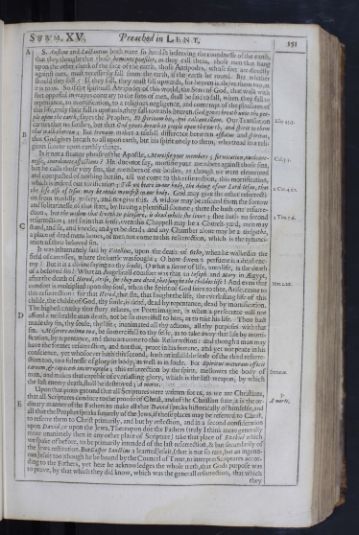 Serm. XV.
Preached in Lent.
151
S. Austine and Lactantius both were so hard in beleeving the roundnesse of the earth,
Serm. XV.
Preached in Lent.
151
S. Austine and Lactantius both were so hard in beleeving the roundnesse of the earth,
that they thought that those homines pensiles, as they call them, those men that hang
upon the other cheek of the face of the earth, those Antipodes, whose feet are directly
against ours, must necessarily fall from the earth, if the earth be round. But whither
should they fall? If they fall, they must fall upwards, for heaven is above them too, as
it is to us. So if the spirituall Antipodes of this world, the Sons of God, that walk with
feet opposed in wayes contrary to the sons of men, shall be said to fall, when they fall to
repentance, to mortification, to a religious negligence, and contempt of the pleasures of
this life, truly their fall is upwards, they fall towards heaven. God gives breath unto the peo-
ple upon the earth, sayes the Prophet, Esay 45. 5 Et spiritum his, qui calcant illam. Our Translation
carries that no farther, but that God gives breath to people upon the earth, and spirit to them
that walk thereon; But Irenæus makes a usefull difference between afflatus and spiritus,
that God gives breath to all upon earth, but his spirit onely to them, who tread in a reli-
gious scorne upon earthly things.
Is it not a strange phrase of the Apostle, Col. 3. 5. Mortifie your members; fornication, uncleane-
nesse, inordinate affections? He does not say, mortifie your members against those sins,
but he calls those very sins, the members of our bodies, as though we were elemented
and compacted of nothing but sin, till we come to this resurrection, this mortification,
which is indeed our vivification; 2 Cor. 4. 10. Till we beare in our body, the dying of our Lord Iesus, that
the life also of Iesus may be made manifest in our body. God may give the other resurrecti-
on from worldly misery, and not give this. A widow may be rescued from the sorrow
and solitarinesse of that state, by having a plentifull fortune; there she hath one resurre-
ction; but 1 Tim. 5. 6. the widow that liveth in pleasure, is dead while she lives; shee hath no second
resurrection; and so in that sense, even this Chappell may be a Church-yard, men may
stand, and sit, and kneele, and yet be dead; and any Chamber alone may be a Golgotha,
a place of dead mens bones, of men not come to this resurrection, which is the renunci-
ation of their beloved sin.
It was inhumanely said by Vitellius, upon the death of Otho, when he walked in the
field of carcasses, where the battle was fought; O how sweet a perfume is a dead ene-
my! But it is a divine saying to thy soule, O what a savor of life, unto life, is the death
of a beloved sin! What an Angelicall comfort was that to Ioseph and Mary in Ægypt,
after the death of Herod, Mat. 2. 20. Arise, for they are dead, that sought the childes life! And even that
comfort is multiplied upon thy soul, when the Spirit of God saies to thee, Arise come to
this resurrection: for that Herod, that sin, that sought the life, the everlasting life of this
childe, the childe of God, thy soule, is dead, dead by repentance, dead by mortification.
The highest cruelty that story relates, or Poets imagine, is when a persecutor will not
afford a miserable man death, not be so mercifull to him, as to take his life. Thou hast
made thy sin, thy soule, thy life; inanimated all thy actions, all thy purposes with that
sin. Miserere animæ tuæ, be so mercifull to thy selfe, as to take away that life by morti-
fication, by repentance, and thou art come to this Resurrection: and though a man may
have the former resurrection, and not this, peace in his fortune, and yet not peace in his
conscience, yet whosoever hath this second, hath an infallible seale of the third resurre-
ction too, to a fulnesse of glory in body, as well as in soule. For Spiritus maturam efficit
carnem, & capacem incorruptelæ;Irenæus. this resurrection by the spirit, mellowes the body of
man, and makes that capable of everlasting glory, which is the last weapon, by which
the last enemy death, shall be destroyed; A morte.
3.
A morte. Upon that pious ground that all Scriptures were written for us, as we are Christians,
that all Scriptures conduce to the proofe of Christ, and of the Christian state, it is the or-
dinary manner of the Fathers to make all that David speaks historically of himselfe, and
all that the Prophet speaks futurely of the Jews, if those places may be referred to Christ,
to referre them to Christ primarily, and but by reflection, and in a second consideration
upon David, or upon the Jews. Thereupon doe the Fathers (truly I think more generally
more unanimely then in any other place of Scripture) take that place of Ezekiel which
we spake of before, to be primarily intended of the last resurrection, & but secundarily of
the Jews restitution. But Gasper Sanctius a learned Jesuit, (that is not so rare, but an ingenu-
ous Jesuit too) though he be bound by the Councel of Trent, to interpret Scriptures accor-
ding to the Fathers, yet he here acknowledges the whole truth, that Gods purpose was
to prove, by that which they did know, which was the generall resurrection, that which they
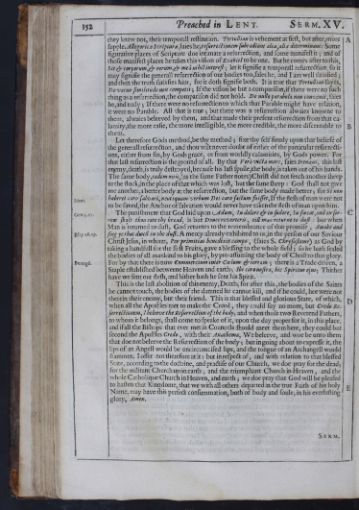 152
Preached in Lent.
Serm. XV.
they knew not, their temporall restitution. Tertullian is vehement at first, but after, more
152
Preached in Lent.
Serm. XV.
they knew not, their temporall restitution. Tertullian is vehement at first, but after, more
supple, Allegoricæ Scripturæ, saies he, resurrectionem subradiant aliæ, aliæ determinant: Some
figurative places of Scripture doe intimate a resurrection, and some manifest it; and of
those manifest places he takes this vision of Ezekiel to be one. But he comes after to this,
Sit & corporum, & rerum, & me â nihil interest; let it signifie a temporall resurrection, so it
may signifie the generall resurrection of our bodies too, saies he, and I am well satisfied;
and then the truth satisfies him, for it doth signifie both. It is true that Tertullian sayes,
De vacuo similitudo non competit; If the vision be but a comparison, if there were no such
thing as a resurrection, the comparison did not hold. De nullo par abola non convenit, saies
he, and truly; If there were no resurrection to which that Parable might have relation,
it were no Parable. All that is true; but there was a resurrection alwaies knowne to
them, alwaies beleeved by them, and that made their present resurrection from that ca-
lamity, the more easie, the more intelligible, the more credible, the more discernable to
them. Let therefore Gods method, be thy method; fixe thy self firmly upon that beliefe of
the generall resurrection, and thou wilt never doubt of either of the particular resurrecti-
ons, either from sin, by Gods grace, or from worldly calamities, by Gods power. For
that last resurrection is the ground of all. By that Verè victa mors, saies Irenæus, this last
enemy, death, is truly destroyed, because his last spoile, the body, is taken out of his hands.
The same body, eadem ovis, (as the same Father notes) Christ did not fetch another sheep
to the flock, in the place of that which was lost, but the same sheep: God shall not give
me another, a better body at the resurrection, but the same body made better; for Si non
haberet caro salvari, neutiquam verbum Dei caro factum fuissetIdem. , If the flesh of man were not
to be saved, the Anchor of salvation would never have taken the flesh of man upon him. The punishment that God laid upon Adam, Gen. 3. 17. In dolore & in sudore, In sweat, and in sor-
row shalt thou eate thy bread, is but Donecreverteris, till man returne to dust: but when
Man is returned to dust, God returnes to the remembrance of that promise, Awake and
sing ye that dwell in the dustEsay 26. 19. . A mercy already exhibited to us, in the person of our Saviour
Christ Jesus, in whom, Per primitias benedixit campo, (saies S. Chrysostome) as God by
taking a handfull for the first Fruits, gave a blessing to the whole field; so he hath sealed
the bodies of all mankind to his glory, by pre-assuming the body of Christ to that glory.
For by that there is now Bernard. Commercium inter Cœlum & terram; there is a Trade driven, a
Staple established betweene Heaven and earth; Ibi caro nostra, hic Spiritus ejus; Thither
have we sent our flesh, and hither hath he sent his Spirit. This is the last abolition of this enemy, Death; for after this, the bodies of the Saints
he cannot touch, the bodies of the damned he cannot kill, and if he could, hee were not
therein their enemy, but their friend. This is that blessed and glorious State, of which,
when all the Apostles met to make the Creed, they could say no more, but Credo Re-
surrectionem, I beleeve the Resurrection of the body; and when those two Reverend Fathers,
to whom it belongs, shall come to speake of it, upon the day proper for it, in this place,
and if all the Bishops that ever met in Councels should meet them here, they could but
second the Apostles Credo, with their Anathema, We beleeve, and woe be unto them
that doe not beleeve the Resurrection of the body; but in gong about to expresse it, the
lips of an Angell would be uncircumcised lips, and the tongue of an Archangell would
stammer. I offer not therefore at it: but in respect of, and with relation to that blessed
State, according to the doctrine, and practise of our Church, we doe pray for the dead;
for the militant Church upon earth, and the trimphant Church in Heaven, and the
whole Catholique Church in Heaven, and earth; we doe pray that God will be pleased
to hasten that Kingdome, that we with all others departed in the true Faith of his holy
Name, may have this perfect consummation, both of body and soule, in his everlasting
glory, Amen. Serm.
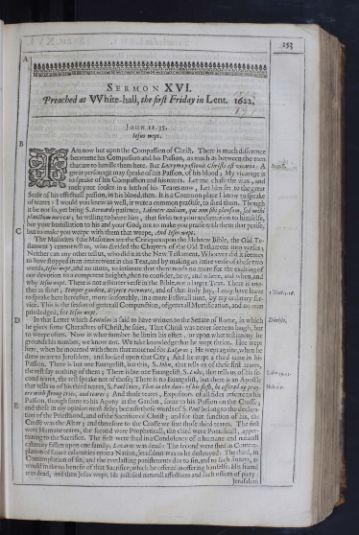 153
153
Sermon XVI.
Preached at VVhite-hallWhite-hall, the first Friday in Lent. 1622.
JOHN 11. 35.
Iesus wept.
I Amam now but upon the Compassion of Christ. There is much difference
betweene his Compassion and his Passion, as much as between the men
that are to handle them here. But Lacryma passionis Christi est vicaria:August. A
great personage may speake of his Passion, of his blood; My vicarage is
to speake of his Compassion and his teares. Let me chafe the wax, and
melt your soules in a bath of his Teares now, Let him set to the great
Seale of his effectuall passion, in his blood, then. It is a Common place I know to speake
of teares: I would you knew as well, it were a common practise, to shed them. Though
it be not so, yet bring S. Bernards patience, Libenter audiam, qui non sibi plausum, sed mihi
planctum moveat; be willing to heare him, that seeks not your acclamation to himselfe,
but your humiliation to his and your God; not to make you praise with them that praise,
but to make you weepe with them that weepe, And Iesus wept.
The Masorites (the Masorites are the Critiques upon the Hebrew Bible, the Old Te-
stament) cannot tell us, who divided the Chapters of the Old Testament into verses;
Neither can any other tell us, who did it in the New Testament. Whoever did it seemes
to have stopped in an amazement in this Text, and by making an intire verse of these two
words, Iesus wept, and no more, to intimate that there needs no more for the exalting of
our devotion to a competent heighth, then to consider, how, and where, and when, and
why Iesus wept. There is not a shorter verse in the Bible, not a larger Text. There is ano-
ther as short; Semper gaudete, Rejoyce evermore, 1 Thes. 5.16. and of that holy Joy, I may have leave
to speake here hereafter, more seasonably, in a more Festivall time, by my ordinary ser-
vice. This is the season of generall Compunction, of generall Mortification, and no man
priviledged, for Iesus wept.
In that Letter which Lentulus is said to have written to the Senate of Rome, Divisio. in which
he gives some Characters of Christ, he saies, That Christ was never seene to laugh, but
to weepe often. Now in what number he limits his often, or upon what testimony he
grounds his number, we know not. We take knowledge that he wept thrice. Hee wept
here, when he mourned with them that mourned for Lazarus; He wept againe, when he
drew neare to Jerusalem, and looked upon that City; And he wept a third time in his
Passion. There is but one Euangelist, but this, S. Iohn, that tells us of these first teares,
the rest say nothing of them; There is but one Euangelist, S. Luke, Luke 19.41. that tells us of his se-
cond teares, the rest speake not of those; There is no Euangelist, but there is an Apostle
that tells us of his third teares, S. Paul saies, Heb. 5.7. That in the daies of his flesh, he offered up pray-
ers with strong cries, and teares; And those teares, Expositors of all sides referre to his
Passion, though some to his Agony in the Garden, some to his Passion on the Crosse;
and these in my opinion most fitly; because those words of S. Paul belong to the declara-
tion of the Priesthood, and of the Sacrifice of Christ; and for that function of his, the
Crosse was the Altar; and therefore to the Crosse we fixe those third teares. The first
were Humane teares, the second were Propheticall, the third were Pontificall, apper-
taining to the Sacrifice. The first were shed in a Condolency of a humane and naturall
calamity fallen upon one family; Lazarus was dead: The second were shed in Contem-
plation of future calamities upon a Nation; Jerusalem was to be destroyed: The third, in
Contemplation of sin, and the everlasting punishments due to sin, and to such sinners, as
would make no benefit of that Sacrifice, which he offered in offering himselfe. His friend
was dead, and then Jesus wept; He justified naturall affections and such offices of piety: Jerusalem
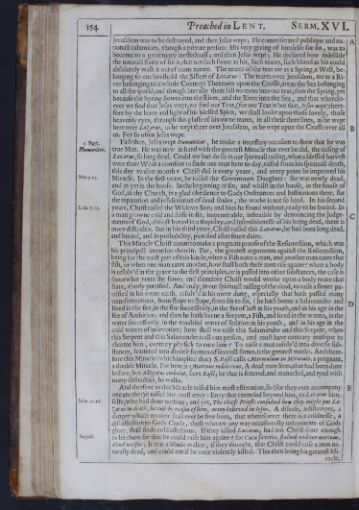 154
Preached in Lent.
Serm. XVI.
Jerusalem was to be destroyed, and then Jesus wept; He commiserated publique and na-
154
Preached in Lent.
Serm. XVI.
Jerusalem was to be destroyed, and then Jesus wept; He commiserated publique and na-tionall calamities, though a private person: His very giving of himselfe for sin, was to
become to a great many ineffectuall; and then Jesus wept; He declared how indelible
the naturall staine of sin is, that not such sweat as his, such teares, such blood as his could
absolutely wash it out of mans nature. The teares of the text are as a Spring, a Well, be-
longing to one houshold the Sisters of Lazarus: The teares over Jerusalem, are as a Ri-
ver belonging to a whole Country: The teares upon the Crosse, are as the Sea belonging
to all the world; and though literally there fall no more into our text, then the Spring, yet
because the Spring flowes into the River, and the River into the Sea, and that whereso-
ever we find that Jesus wept, we find our Text, (for our Text is but that, Iesus wept) there-
fore by the leave and light of his blessed Spirit, we shall looke upon those lovely, those
heavenly eyes, through this glasse of his owne teares, in all these three lines, as he wept
here over Lazarus, as he wept there over Jerusalem, as he wept upon the Crosse over all
us. For so often Jesus wept.
1 Part.
Humanitus. First then, Jesus wept Humanitus, he tooke a necessary occasion to shew that he was
true Man. He was now in hand with the greatest Miracle that ever he did, the raising of
Lazarus, so long dead. Could we but do so in our spirituall raising, what a blessed harvest
were that? What a comfort to finde one man here to day, raised from his spirituall death,
this day twelve-month? Christ did it every yeare, and every yeare he improved his
Miracle.Mat. 9.25. In the first yeare, he raised the Governours Daughter: she was newly dead,
and as yet in the house. In the beginning of sin, and whilst in the house, in the house of
God, in the Church, in a glad obedience to Gods Ordinances and Institutions there, for
the reparation and resuscitation of dead soules, the worke is not so hard. In his second
yeare, Luke 7.15. Christ raised the Widows Son; and him he found without, ready to be buried. In
a man growne cold and stiffe in sin, impenetrable, inflexible by denouncing the Judge-
ments of God, almost buried in a stupidity, and insensiblenesse of his being dead, there is
more difficultie. But in his third yeare, Christ raised this Lazarus, he had been long dead,
and buried, and in probability, putrified after foure daies.
This Miracle Christ meant to make a pregnant proofe of the Resurrection, which was
his principall intention therein. For, the greatest arguments against the Resurrection,
being for the most part of this kinde, when a Fish eates a man, and another man eates that
fish, or when one man eates another, how shall both these men rise againe? when a body
is resolv'd in the grave to the first principles, or is passed into other substances, the case is
somewhat neere the same; and therefore Christ would worke upon a body neare that
state, a body putrified. And truly, in our spirituall raising of the dead, to raise a sinner pu-
trified in his owne earth, resolv'd in his owne dung, especially that hath passed many
transformations, from shape to shape, from sin to sin, (he hath beene a Salamander and
lived in the fire, in the fire successively, in the fire of lust in his youth, and in his age in the
fire of Ambition; and then he hath beene a Serpent, a Fish, and lived in the waters, in the
water successively, in the troubled water of sedition in his youth, and in his age in the
cold waters of indevotion) how shall we raise this Salamander and this Serpent, when
this Serpent and this Salamander is all one person, and must have contrary musique to
charme him, contrary physick to cure him? To raise a man resolv'd into diverse sub-
stances, scattered into diverse formes of severall sinnes, is the greatest worke. And there-
fore this Miracle (which implied that) S. Basil calls Miraculum in Miraculo, a pregnant,
a double Miracle. For here is Mortuus redivivus, A dead man lives; that had been done
before; but Alligatus ambulat, saies Basil; he that is fettered, and manacled, and tyed with
many difficulties, he walks.
And therfore as this Miracle raised him most estimation, so (for they ever accompany
one another) it raised him most envy: Envy that extended beyond him, to Lazarus him-
selfe, who had done nothing; and yet, Iohn 12.10. The chiefe Priests consulted how they might put La-
zarus to death, because by reason of him, many beleeved in Iesus. A disease, a distemper, a
danger which no time shall ever be free from, that wheresoever there is a coldnesse, a
dis-affection to Gods Cause, those who are any way occasionally instruments of Gods
glory, shall finde cold affections. If they killed Lazarus, had not Christ done enough
to let them see that he could raise him againe? for August. Cæca sævitia, si aliud videtur mortuus,
aliud occisus; It was a blinde malice, if they thought, that Christ could raise a man na-
turally dead, and could not if he were violently killed. This then being his greatest Mi- racle,
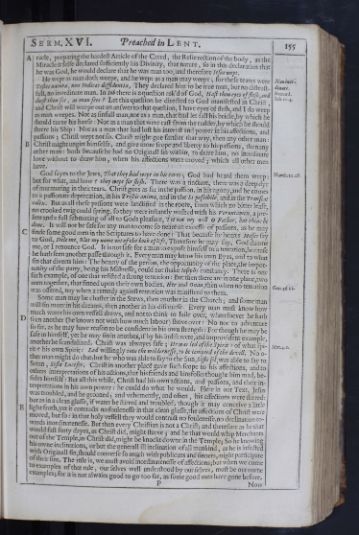 Serm. XVI.
Preached in Lent.
155
racle, preparing the hardest Article of the Creed, the Resurrection of the body, as the
Serm. XVI.
Preached in Lent.
155
racle, preparing the hardest Article of the Creed, the Resurrection of the body, as the
Miracle it selfe declared sufficiently his Divinity, that nature, so in this declaration that
he was God, he would declare that he was man too, and therefore Iesus wept.
Non inor-
dinatè. He wept as man doth weepe, and he wept as a man may weepe; for these teares were
Testes naturæ, non Indices diffidentiæ, They declared him to be true man, but no distrust-
full, no inordinate man.Bernard. In Iob there is a question ask'd of God, Hast thou eyes of flesh, and
doest thou see, as man sees?Iob 10.4. Let this question be directed to God manifested in Christ,
and Christ will weepe out an answer to that question, I have eyes of flesh, and I do weep
as man weepes. Not as sinfull man, not as a man, that had let fall his bridle, by which he
should turne his horse: Not as a man that were cast from the rudder, by which he should
steere his Ship: Not as a man that had lost his interest and power in his affections, and
passions; Christ wept not so. Christ might goe farther that way, then any other man:
Christ might ungirt himselfe, and give more scope and liberty to his passions, then any
other man: both because he had no Originall sin within, to drive him, no inordinate
love without to draw him, when his affections were moved; which all other men
have.
God sayes to the Jews, That they had wept in his eares;Numb. 11.18. God had heard them weep:
but for what, and how? they wept for flesh. There was a tincture, there was a deep dye
of murmuring in their tears. Christ goes as far in the passion, in his agony, and he comes
to a passionate deprecation, in his Tristis anima, and in the Si possibile, and in the Transeat
calix. But as all these passions were sanctified in the roote, from which no bitter leafe,
no crooked twig could spring, so they were instantly washed with his Veruntamen, a pre-
sent and a full submitting of all to Gods pleasure, Yet not my will O Father, but thine be
done. It will not be safe for any man to come so neare an excesse of passions, as he may
finde some good men in the Scriptures to have done: That because he heares Moses say
to God, Dele me, Blot my name out of the book of life, Therefore he may say, God damne
me, or I renounce God. It is not safe for a man to expose himself to a tentation, because
he hath seen another passe through it. Every man may know his own Byas, and to what
sin that diverts him: The beauty of the person, the opportunity of the place, the impor-
tunity of the party, being his Mistresse, could not shake Iosephs constancy. There is one
such example, of one that resisted a strong tentation: But then there are in one place, two
men together, that sinned upon their own bodies, Her and Onan, Gen. 46.12. then when no tentation
was offered, nay when a remedy against tentation was ministred to them.
Some man may be chaster in the Stews, then another in the Church; and some man
will sin more in his dreams, then another in his discourse. Every man must know how
much water his own vessell draws, and not to think to saile over, wheresoever he hath
seen another (he knows not with how much labour) shove over: No nor to adventure
so far, as he may have reason to be confident in his own strength: For though he may be
safe in himself, yet he may sin in another, if by his indiscreete, and improvident example,
another be scandalized. Christ was alwayes safe; He was led of the Spirit:Mat. 4.1. of what spi-
rit? his own Spirit: Led willingly into the wildernesse, to be tempted of the devill. No o-
ther man might do that; but he who was able to say to the Sun, Siste sol, was able to say to
Satan, Siste Lucifer. Christ in another place gave such scope to his affections, and to
others interpretations of his actions, that his friends and kinsfolks thought him mad, be-
sides himself: But all this while, Christ had his own actions, and passions, and their in-
terpretations in his own power: he could do what he would. Here in our Text, Jesus
was troubled, and he groaned; and vehemently, and often, his affections were stirred:
but as in a clean glasse, if water be stirred and troubled, though it may conceive a little
light froth, yet it contracts no foulenesse in that clean glasse, the affections of Christ were
moved, but so: in that holy vessell they would contract no foulenesse, no declination to-
wards inordinatenesse. But then every Christian is not a Christ; and therefore as he that
would fast forty dayes, as Christ did, might starve; and he that would whip Merchants
out of the Temple, as Christ did, might be knockt downe in the Temple; So he knowing
his owne inclinations, or but the generall ill inclination of all mankind, as he is infected
with Originall sin, should converse so much with publicans and sinners, might participate
of their sins. The rule is, we must avoid inordinatenesse of affections; but when we come
to examples of that rule, our selves well understood by our selves, must be our owne
examples; for it is not alwaies good to go too far, as some good men have gone before. P Now
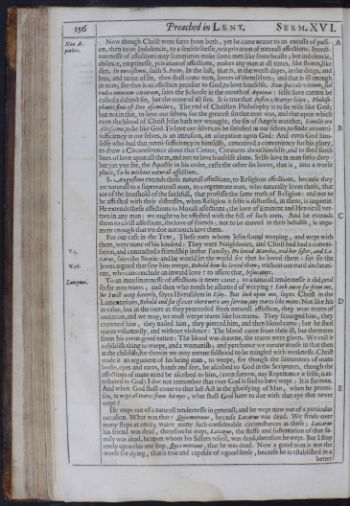 156
Preached in Lent.
Serm. XVI.
Non A-
156
Preached in Lent.
Serm. XVI.
Non A-pathes. Now though Christ were farre from both, yet he came nearer to an excesse of passi-
on, then to an Indolencie, to a senselesnesse, to a privation of naturall affections. Inordi-
natenesse of affections may sometimes make some men like some beasts; but indolencie,
absence, emptinesse, privation of affections, makes any man at all times, like stones, like
dirt. In novissimis, saith S. Peter, In the last, that is, in the worst dayes, in the dregs, and
lees, and tartar of sin, then shall come men, lovers of themselves; and that is ill enough
in man; for that is an affection peculiar to God, to love himselfe. Non speciale vitium, sed
radix omnium vitiorum, saies the Schoole in the mouth of Aquinas: selfe-love cannot be
called a distinct sin, but the roote of all sins. It is true that Iustin Martyr saies, Philoso-
phanti finis est Deo assimilari, The end of Christian Philosophy is to be wise like God;
but not in this, to love our selves; for the greatest sin that ever was, and that upon which
even the blood of Christ Jesus hath not wrought, the sin of Angels was that, Similis ero
Altissimo, to be like God. To love our selves, to be satisfied in our selves, to finde an omni-
sufficiency in our selves, is an intrusion, an usurpation upon God: And even God him-
selfe who had that omni-sufficiency in himselfe, conceived a conveniency for his glory,
to draw a Circumference about that Center, Creatures about himselfe, and to shed forth
lines of love upon all them, and not to love himselfe alone. Selfe-love in man sinks deep:
but yet you see, the Apostle in his order, casts the other sin lower, that is, into a worse
place, To be without naturall affections.
S. Augustine extends these naturall affections, to Religious affections, because they
are naturall to a supernaturall man, to a regenerate man, who naturally loves those, that
are of the houshold of the faithfull, that professe the same truth of Religion: and not to
be affected with their distresses, when Religion it selfe is distressed, in them, is impietie.
He extends these affections to Morall affections; the love of Eminent and Heroicall ver-
tues in any man: we ought to be affected with the fall of such men. And he extends
them to civill affections, the love of friends; not to be moved in their behalfe, is argu-
ment enough that we doe not much love them.
For our case in the Text, These men whom Jesus found weeping, and wept with
them, were none of his kindred: They were Neighbours, and Christ had had a conver-
sation, and contracted a friendship in that Family;V. 5. He loved Martha, and her sister, and La-
zarus, saies the Storie: and he would let the world see that he loved them: for so the
Jewes argued that saw him weepe, V. 36. Behold how he loved them; without outward declarati-
ons, who can conclude an inward love? to assure that, Iesus wept.
Lacrymæ. To an inordinatenesse of affections it never came; to a naturall tendernesse it did; and
so far as to teares; and then who needs be ashamed of weeping? Look away far from me,
for I will weep bitterly, sayes Hierusalem in Esay. But look upon me, sayes Christ in the
Lamentations, Behold and see if ever there were any sorrow, any teares like mine: Not like his
in value, but in the roote as they proceeded from naturall affection, they were teares of
imitation, and we may, we must weepe teares like his teares. They scourged him, they
crowned him, they nailed him, they pierced him, and then blood came; but he shed
teares voluntarily, and without violence: The blood came from their ill, but the teares
from his owne good nature: The blood was drawne, the teares were given. We call it
a childish thing to weepe, and a womanish; and perchance we meane worse in that then
in the childish; for therein we may meane falshood to be mingled with weaknesse. Christ
made it an argument of his being man, to weepe, for though the lineaments of mans
bodie, eyes and eares, hands and feet, be ascribed to God in the Scriptures, though the
affections of mans mind be ascribed to him, (even sorrow, nay Repentance it selfe, is at-
tributed to God) I doe not remember that ever God is said to have wept: It is for man.
And when God shall come to that last Act in the glorifying of Man, when he promi-
ses, to wipe all teares from his eyes, what shall God have to doe with that eye that never
wept?
He wept out of a nuturall tendernesse in generall; and he wept now out of a particular
occasion. What was that? Quia mortuus, because Lazarus was dead. We stride over
many steps at once; waive many such considerable circumstances as these; Lazarus
his friend was dead, therefore he wept, Lazarus, the staffe and sustentation of that fa-
mily was dead, he upon whom his Sisters relied, was dead, therefore he wept. But I stop
onely upon this one step, Quia mortuus, that he was dead. Now a good man is not the
worse for dying, that is true and capable of a good sense, because he is established in a better
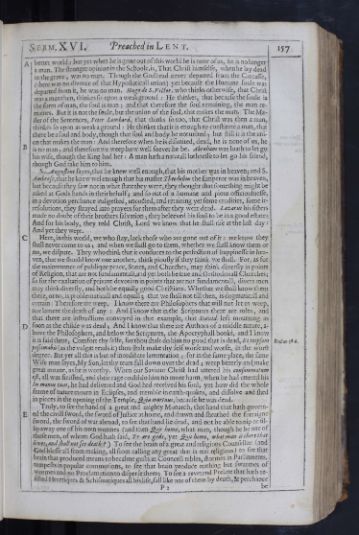 Serm. XVI.
Preached in Lent.
157
better world: but yet when he is gone out of this world he is none of us, he is no longer
Serm. XVI.
Preached in Lent.
157
better world: but yet when he is gone out of this world he is none of us, he is no longer
a man. The stronger opinion in the Schoole, is, That Christ himselfe, when he lay dead
in the grave, was no man. Though the God head never departed from the Carcasse,
(there was no divorce of that Hypostaticall union) yet because the Humane soule was
departed from it, he was no man. Hugo de S. Victor. who thinks otherwise, that Christ
was a man then, thinkes so upon a weak ground: He thinkes, that because the soule is
the form of man, the soul is man; and that therefore the soul remaining, the man re-
maines. But it is not the soule, but the union of the soul, that makes the man. The Ma-
ster of the Sentences, Peter Lombard, that thinks so too, that Christ was then a man,
thinkes so upon as weak a ground: He thinkes that it is enough to constitute a man, that
there be a soul and body, though that soul and body be not united; but still it is the uni-
on that makes the man: And therefore when he is disunited, dead, he is none of us, he
is no man; and therefore we weep how well soever he be. Abraham was loath to let go
his wife, though the King had her: A man hath a naturall lothnesse to let go his friend,
though God take him to him.
S. Augustine sayes, that he knew well enough, that his mother was in heaven; and S.
Ambrose, that he knew wel enough that his master Theodosius the emperor was in heaven,
but because they saw not in what state they were, they thought that something might be
asked at Gods hands in their behalf; and so out of a humane and pious officiousnesse,
in a devotion perchance indigested, uncocted, and retaining yet some crudities, some ir-
resolutions, they strayed into prayers for them after they were dead. Lazarus his sisters
made no doubt of their brothers salvation; they beleeved his soul to be in a good estate:
And for his body, they told Christ, Lord we know that he shall rise at the last day:
And yet they wept.
Here, in this world, we who stay, lack those who are gone out of it: we know they
shall never come to us; and when we shall go to them, whether we shall know them or
no, we dispute. They who think that it conduces to the perfection of happinesse in hea-
ven, that we should know one another, think piously if they think we shall. For, as for
the maintenance of publique peace, States, and Churches, may think diversly in points
of Religion, that are not fundamentall, and yet both be true and Orthodoxall Churches;
so for the exaltation of private devotion in points that are not fundamentall, divers men
may think diversly, and both be equally good Christians. Whether we shall know them
there, or no, is problematicall and equall; that we shall not till then, is dogmaticall and
certain: Therefore we weep. I know there are Philosophers that will not let us weep,
nor lament the death of any: And I know that in the Scriptures there are rules, and
that there are instructions convayed in that example, that David left mourning as
soon as the childe was dead; And I know that there are Authors of a middle nature, a-
bove the Philosophers, and below the Scriptures, the Apocryphall books, and I know
it is said there, Comfort thy selfe, for thou-shalt do him no good that is dead, Ecclus. 38.6. Et teipsum
pessimabis (as the vulgat reads it) thou shalt make thy self worse and worse, in the worst
degree. But yet all this is but of inordinate lamentation; for in the same place, the same
Wise man sayes, My Son, let thy tears fall down over the dead; weep bitterly and make
great moane, as he is worthy. When our Saviour Christ had uttered his consummatum
est, all was finished, and their rage could do him no more harm, when he had uttered his
In manus tuas, he had delivered and God had received his soul, yet how did the whole
frame of nature mourn in Eclipses, and tremble in earth-quakes, and dissolve and shed
in pieces in the opening of the Temple, Quia mortuus, because he was dead.
Truly, to see the hand of a great and mighty Monarch, that hand that hath govern-
ed the civill sword, the sword of Justice at home, and drawn and sheathed the forraigne
sword, the sword of war abroad, to see that hand lie dead, and not be able to nip or fil-
lip away one of his own wormes (and then Quis homo, what man, though he be one of
those men, of whom God hath said, Ye are gods, yet Quis homo, what man is there that
lives, and shall not see death?) To see the brain of a great and religious Counsellor (and
God blesse all from making, all from calling any great that is not religious) to see that
brain that produced means to becalme gusts at Councell tables, stormes in Parliaments,
tempests in popular commotions, to see that brain produce nothing but swarmes of
wormes and no Proclamation to disperse them; To see a reverend Prelate that hath re-
sisted Heretiques & Schismatiques all his life, fall like one of them by death, & perchance P2 be
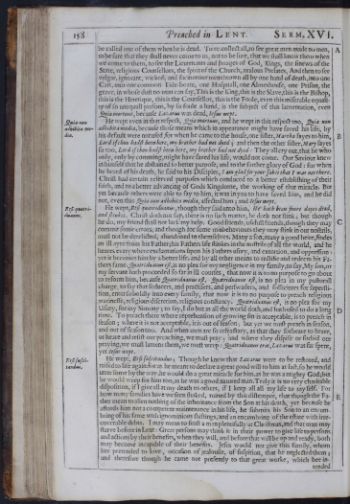 158
Preached in Lent.
Serm. XVI.
be called one of them when he is dead. To re-collect all, to see great men made no men,
158
Preached in Lent.
Serm. XVI.
be called one of them when he is dead. To re-collect all, to see great men made no men,
to be sure that they shall never come to us, not to be sure, that we shall know them when
we come to them, to see the Lieutenants and Images of God, Kings, the sinews of the
State, religious Counsellors, the spirit of the Church, zealous Prelates, And then to see
vulgar, ignorant, wicked, and facinorous men thrown all by one hand of death, into one
Cart, into one common Tide-boate, one Hospitall, one Almeshouse, one Prison, the
grave, in whose dust no man can say, This is the King, this is the Slave, this is the Bishop,
this is the Heretique, this is the Counsellor, this is the Foole, even this miserable equali-
ty of so unequall persons, by so foule a hand, is the subject of this lamentation, even
Quia mortuus, because Lazarus was dead, Iesus wept.
Quia non
adhibita me-
dia. He wept even in that respect, Quia mortuus, and he wept in this respect too, Quia non
adhibita media, because those means which in appearance might have saved his life, by
his default were not used, for when he came to the house, one sister, Martha sayes to him,
Lord if thou hadst been here, my brother had not dyed; and then the other sister, Mary sayes
so too, Lord if thou hadst been here, my brother had not dyed: They all cry out, that he who
only, only by comming, might have saved his life, would not come. Our Saviour knew
in himself that he abstained to better purpose, and to the farther glory of God: for when
he heard of his death, he said to his Disciples, I am glad for your sakes that I was not there.
Christ had certain reserved purposes which conduced to a better establishing of their
faith, and to a better advancing of Gods Kingdome, the working of that miracle. But
yet because others were able to say to him, it was in you to have saved him, and he did
not, even this Quia non adhibita media, affected him; and Iesus wept.
Etsi quatri-
duanus. He wept, Etsi quatriduanus, though they said unto him, He hath been foure dayes dead,
and stinkes. Christ doth not say, there is no such matter, he doth not stink; but though
he do, my friend shall not lack my help. Good friends, usefull friends though they may
commit some errors, and though for some misbehaviours they may stink in our nostrils,
must not be derelicted, abandoned to themselves. Many a son, many a good heire, findes
an ill ayre from his Father; his Fathers life stinkes in the nostrils of all the world, and he
heares every where exclamations upon his Fathers usury, and extortion, and oppression:
yet it becomes him by a better life, and by all other means to rectifie and redeem his Fa-
thers fame. Quatriduanus est, is no plea for my negligence in my family; to say, My son, or
my servant hath proceeded so far in ill courses, that now it is to no purpose to go about
to reform him, because Quatriduanus est. Quatriduanus est, is no plea in my pastorall
charge, to say that seducers, and practisers, and perswaders, and sollicitors for supersti-
tion, enter so boldly into every family, that now it is to no purpose to preach religious
warinesse, religious discretion, religious constancy. Quatriduanus est, is no plea for my
Usury, for my Simony; to say, I do but as all the world doth, and hath used to do a long
time. To preach there where reprehension of growing sin is acceptable, is to preach in
season; where it is not acceptable, it is out of season; but yet we must preach in season,
and out of season too. And when men are so refractary, as that they forbeare to heare,
or heare and resist our preaching, we must pray; and where they dispise or forbid our
praying, we must lament them, we must weep: Quatriduanus erat, Lazarus was far spent,
yet Iesus wept.
Etsi susci-
tandus. He wept, Etsi suscitandus; Though he knew that Lazarus were to be restored, and
raised to life again: for as he meant to declare a great good will to him at last, so he would
utter some by the way; he would do a great miracle for him, as he was a mighty God; but
he would weep for him too, as he was a good natured man. Truly it is no very charitable
disposition, if I give all at my death to others, if I keep all all my life to my self. For
how many families have we seen shaked, ruined by this distemper, that though the Fa-
ther mean to alien nothing of the inheritance from the Son at his death, yet because he
affords him not a competent maintenance in his life, he submits his Son to an encum-
bring of his fame with ignominious shiftings, and an encumbring of the estate with irre-
coverable debts. I may mean to feast a man plentifully at Christmas, and that man may
starve before in Lent: Great persons may think it in their power to give life to persons
and actions by their benefits, when they will, and before that will be up and ready, both
may become incapable of their benefits. Jesus would not give this family, whom
hee pretended to love, occasion of jealousie, of suspition, that he neglected them;
and therefore though he came not presently to that great worke, which hee in-
tended
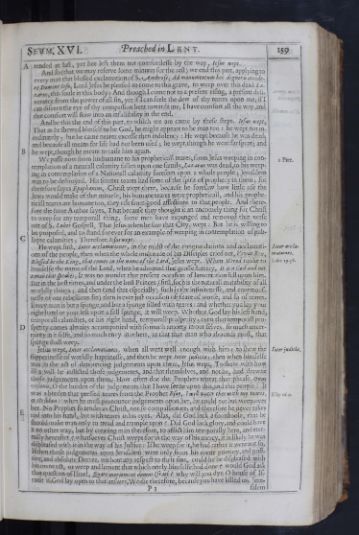 Serm. XVI.
Preached in Lent.
159
tended at last, yet hee left them not comfortlesse by the way, Iesus wept.
Serm. XVI.
Preached in Lent.
159
tended at last, yet hee left them not comfortlesse by the way, Iesus wept.
And so (that we may reserve some minutes for the rest) we end this part, applying to
every man that blessed exclamation of S. Ambrose, Ad monumentum hoc digneris accede-
re Domine Iesu, Lord Jesus be pleased to come to this grave, to weep over this dead La-
zarus, this soule in this body: And though I come not to a present rising, a present deli-
verance from the power of all sin, yet if I can feele the dew of thy teares upon me, if I
can discern the eye of thy compassion bent towards me, I have comfort all the way, and
that comfort will flow into an infallibility in the end.
And be this the end of this part, to which we are come by these steps. Iesus wept,
That as he shewed himself to be God, he might appeare to be man too: he wept not in-
ordinately; but he came nearer excesse then indolency: He wept because he was dead;
and because all means for life had not been used; he wept, though he were far spent; and
he wept, though he meant to raise him again.
2 Part. We passe now from his humane to his propheticall teares, from Jesus weeping in con-
templation of a naturall calamity fallen upon one family, Lazarus was dead, to his weep-
ing in contemplation of a Nationall calamity foreseen upon a whole people; Jerusalem
was to be destroyed. His former teares had some of the spirit of prophecy in them; for
therefore sayes Epiphanius, Christ wept there, because he foresaw how little use the
Jews would make of that miracle, his humane teares were propheticall, and his prophe-
ticall teares are humane too, they rise from good affections to that people. And there-
fore the same Author sayes, That because they thought it an uncomely thing for Christ
to weep for any temporall thing, some men have expunged and removed that verse
out of S. Lukes Gospell, That Jesus when he saw that City, wept: But he is willing to
be proposed, and to stand for ever for an example of weeping in contemplation of pub-
lique calamities; Therefore Iesus wept.
Inter accla-
mationes. He wept first, Inter acclamationes, in the midst of the congratulations and acclamati-
ons of the people, then when the whole multitude of his Disciples cried out, Vivat Rex,
Blessed be the King, that comes in the name of the Lord, Luke 19.38. Jesus wept. When Herod tooke to
himselfe the name of the Lord, when he admitted that grosse flattery, It is a God and not
a man that speakes, It was no wonder that present occasion of lamentation fell upon him.
But in the best times, and under the best Princes, (first, such is the naturall mutability of all
worldly things; and then (and that especially) such is the infinitenesse, and enormous-
nesse of our rebellious sin) then is ever just occasion of feare of worse, and so of teares.
Every man is but a spunge, and but a spunge filled with teares: and whether you lay your
right hand or your left upon a full spunge, it will weep. Whether God lay his left hand,
temporall calamities, or his right hand, temporall prosperity; even that temporall pro-
sperity comes alwaies accompanied with so much anxiety in our selves, so much uncer-
tainty in it selfe, and so much envy in others, as that that man who abounds most, that
spunge shall weep.
Inter judicia. Jesus wept, Inter acclamationes, when all went well enough with him; to shew the
slipperinesse of worldly happinesse, and then he wept Inter judicia; then when himselfe
was in the act of denouncing judgements upon them, Jesus wept, To shew with how
ill a will he inflicted those judgements, and that themselves, and not he, had drawne
those judgements upon them. How often doe the Prophets repeat that phrase, Onus
visionis, O the burden of the judgements that I have seene upon this, and this people! It
was a burden that pressed teares from the Prophet Esay, Esay 16.9. I will water thee with my teares,
O Heshbon: when he must pronounce judgements upon her, he could not but weep over
her. No Prophet so tender as Christ, nor so compassionate; and therefore he never takes
rod into his hand, but with teares in his eyes. Alas, did God lack a footstoole, that he
should make man only to tread and trample upon? Did God lack glory, and could have
it no other way, but by creating man therefore, to afflict him temporally here, and eter-
nally hereafter? whatsoever Christ weeps for in the way of his mercy, it is likely he was
displeased with it in the way of his Justice: If he weep for it, he had rather it were not so.
If then those judgements upon Jerusalem were only from his owne primary, and posi-
tive, and absolute Decree, without any respect to their sins, could he be displeased with
his owne act, or weep and lament that which onely himselfe had done? would God ask
that question of Israel, Quare moriemini domus Israel? why will you dye O house of Is-
rael? if God lay open to that answer, We die therefore, because you have killed us; Jeru- P3 salem
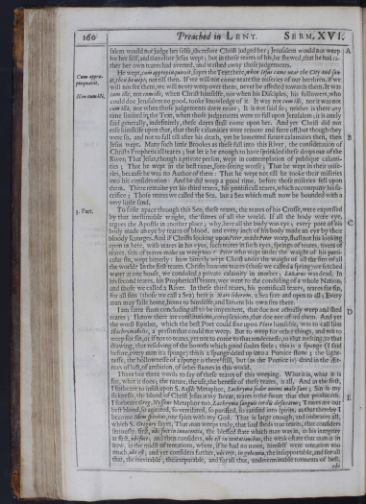 160
Preached in Lent.
Serm. XVI.
salem would not judge her selfe, therefore Christ judged her; Jerusalem would not weep
160
Preached in Lent.
Serm. XVI.
salem would not judge her selfe, therefore Christ judged her; Jerusalem would not weep
for her self, and therefore Jesus wept; but in those teares of his, he shewed, that he had ra-
ther her own teares had averted, and washed away those judgements.
Cum appro-
pinquavit. He wept, cum appropinquavit, sayes the Text there, when Iesus came near the City and saw
it, then he wept; not till then. If we will not come neare the miseries of our brethren, if we
will not see them, we will never weep over them, never be affected towards them. It was
cum ille, not cum illi, Non cum illi. when Christ himselfe, not when his Disciples, his followers, who
could doe Jerusalem no good, tooke knowledge of it. It was not cum illi, nor it was not
cum illa, not when those judgements drew neare; It is not said so; neither is there any
time limited in the Text, when those judgements were to fall upon Jerusalem; it is onely
said generally, indefinitely, these dayes shall come upon her. And yet Christ did not
ease himselfe upon that, that those calamities were remote and farre off, but though they
were so, and not to fall till after his death, yet he lamented future calamities then, then
Jesus wept. Many such little Brookes as these fall into this River, the consideration of
Christs Propheticall teares; but let it be enough to have sprinkled these drops out of the
River; That Jesus, though a private person, wept in contemplation of publique calami-
ties; That he wept in the best times, fore-seeing worse; That he wept in their mise-
ries, because he was no Author of them: That he wept not till he tooke their miseries
into his consideration: And he did weep a good time, before those miseries fell upon
them. There remaine yet his third teares, his pontificall teares, which accompany his sa-
crifice; Those teares we called the Sea, but a Sea which must now be bounded with a
very little sand.
3. Part. To saile apace through this Sea; these teares, the teares of his Crosse, were expressed
by that inestimable waight, the sinnes of all the world. If all the body were eye,
argues the Apostle in another place; why, here all the body was eye; every pore of his
body made an eye by teares of blood, and every inch of his body made an eye by their
bloody scourges. And if Christs looking upon Peter, made Peter weep, shall not his looking
upon us here, with teares in his eyes, such teares in such eyes, springs of teares, rivers of
teares, seas of teares make us weep too? Peter who wept under the waight of his parti-
cular sin, wept bitterly: how bitterly wept Christ under the waight of all the sins of all
the world? In the first teares, Christs humane teares (those we called a spring) we fetched
water at one house, we condoled a private calamity in another; Lazarus was dead. In
his second teares, his Propheticall teares, wee went to the condoling of a whole Nation;
and those we called a River. In these third teares, his pontificall teares, teares for sin,
for all sins (those we call a Sea) here is Mare liberum, a Sea free and open to all; Every
man may saile home, home to himselfe, and lament his own sins there.
I am farre ftomfrom concluding all to be impenitent, that doe not actually weep and shed
teares; I know there are constitutions, complexions, that doe not afford them. And yet
the worst Epithet, which the best Poet could fixe upon Pluto himselfe, was to call him
Illachrymabilis, a person that could not weep. But to weep for other things, and not to
weep for sin, or if not to teares, yet not to come to that tendernesse, to that melting, to that
thawing, that resolving of the bowels which good soules feele; this is a spunge (I said
before, every man is a spunge) this is a spunge dried up into a Pumice stone; the light-
nesse, the hollownesse of a spunge is there still, but (as the Pumice is) dried the Æt-
næs of lust, of ambition, of other flames in this world.
I have but three words to say of these teares of this weeping. What it is, what it is
for, what it does; the nature, the use, the benefit of these teares, is all. And in the first,
I forbeare to insist upon S. Basils Metaphor, Lachrymæ sudor animi male sani; Sin is my
sicknesse, the blood of Christ Jesus is my Bezar, teares is the sweat that that produceth.
I forbeare Greg. Nyssens metaphor too, Lachryma sanguis cordis defœcatus; Teares are our
best blood, so agitated, so ventilated, so purified, so rarified into spirits, as that thereby I
become Idem spiritus, one spirit with my God. That is large enough, and imbraces all,
which S. Gregory sayes, That man weeps truly, that soul sheds true teares, that considers
seriously, first, ubi fuit in innocentia, the blessed state which man was in, in his integrity
at first, ubi fuit; and then considers, ubi est in tentationibus, the weak estate that man is in
now, in the midst of tentations, where, if he had no more, himself were tentation too
much, ubi est; and yet considers farther, ubi erit, in gehenna, the insupportable, and for all
that, the inevitable, the irreparable, and for all that, undeterminable torments of hell, ubi
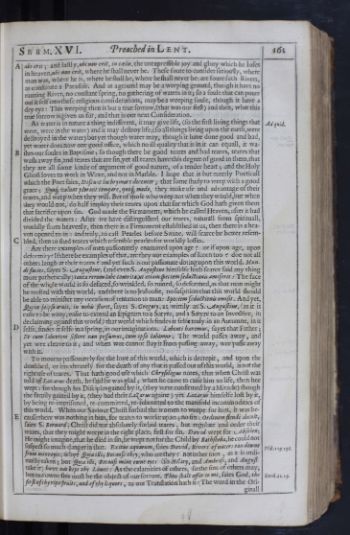 Serm. XVI.
Preached in Lent.
161
ubi erit; and lastly, ubi non erit, in cœlis, the unexpressible joy and glory which he loses
Serm. XVI.
Preached in Lent.
161
ubi erit; and lastly, ubi non erit, in cœlis, the unexpressible joy and glory which he loses
in heaven, ubi non erit, where he shall never be. These foure to consider seriously, where
man was, where he is, where he shall be, where he shall never be, are foure such Rivers,
as constitute a Paradise. And as a ground may be a weeping ground, though it have no
running River, no constant spring, no gathering of waters in it; so a soule that can poure
out it self into these religious considerations, may be a weeping soule, though it have a
dry eye: This weeping then is but a true sorrow, (that was our first) and then, what this
true sorrow is given us for, and that is our next Consideration.
Ad quid. As water is in nature a thing indifferent, it may give life, (so the first living things that
were, were in the water) and it may destroy life, (so all things living upon the earth, were
destroyed in the water) but yet though water may, though it have done good and bad,
yet water does now one good office, which no ill quality that is in it can equall, it wa-
shes our soules in Baptisme; so though there be good teares and bad teares, teares that
wash away sin, and teares that are sin, yet all teares have this degree of good in them, that
they are all some kinde of argument of good nature, of a tender heart; and the Holy
Ghost loves to work in Waxe, and not in Marble. I hope that is but meerly Poeticall
which the Poet saies, Discunt lachrymare decenter; that some study to weep with a good
grace; Quo volunt plorant tempore, quo modo, they make use and advantage of their
teares, and weep when they will. But of those who weep not when they would, but when
they would not, do half imploy their teares upon that for which God hath given them
that sacrifice upon sin. God made the Firmament, which he called Heaven, after it had
divided the waters: After we have distinguished our teares, naturall from spirituall,
worldly from heavenly, then there is a Firmament established in us, then there is a hea-
ven opened to us: and truly, to cast Pearles before Swine, will scarce be better resem-
bled, then to shed teares which resemble pearles for worldly losses.
Are there examples of men passionately enamored upon age? or if upon age, upon
deformity? If there be examples of that, are they not examples of scorn too? doe not all
others laugh at their teares? and yet such is our passionate doting upon this world. Mun-
di facies, sayes S. Augustine, (and even S. Augustine himselfe hath scarce said any thing
more pathetically) tanta rerum labe contrita, ut etiam speciem seductionis amiserit: The face
of the whold world is so defaced, so wrinkled, so ruined, so deformed, as that man might
be trusted with this world, and there is no jealousie, no suspition that this world should
be able to minister any occasion of tentation to man: Speciem seductionis amisit. And yet,
Qui in seipso aruit, in nobis floret, sayes S. Gregory, as wittily as S. Augustine, (as it is
easie to be witty, easie to extend an Epigram to a Satyre, and a Satyre to an Invective, in
declaiming against this world) that world which findes it selfe truly in an Autumne, in it
selfe, findes it selfe in a spring, in our imaginations. Labenti hæremus, sayes that Father;
Et cum labentem sistere non possumus, cum ipso labimur; The world passes away, and
yet wee cleave to it; and when wee cannot stay it from passing away, wee passe away
with it.
To mourne passionately for the love of this world, which is decrepit, and upon the
deathbed, or imoderately for the death of any that is passed out of this world, is not the
right use of teares. That hath good use which Chrysologus notes, that when Christ was
told of Lazarus death, he said he was glad; when he came to raise him to life, then hee
wept: for though his Disciples gained by it, (they were confirmed by a Miracle) though
the family gained by it, (they had their LaZarusLazarus againe) yet Lazarus himselfe lost by it,
by being re-imprisoned, re-committed, re-submitted to the manifold incommodities of
this world. When our Saviour Christ forbad the women to weepe for him, it was be-
cause there was nothing in him, for teares to worke upon; no sin: Ordinem flendi docuit,
saies S. Bernard, Christ did not absolutely forbid teares, but regulate and order their
teares, that they might weepe in the right place; first for sin. David wept for Absolon;
He might imagine, that he died in sin, he wept not for the Child by Bathsheba, he could not
suspect so much danger in that. Exitus aquarum, saies David, Rivers of waters ran downe
from mine eyes, Psal. 119.136. why? Quia illi, Because they, who are they? not other men, as it is ordi-
narily taken; but Quia illi, Because mine owne eyes (so Hilary, and Ambrose, and August.
take it) have not kept thy Lawes: As the calamities of others, so the sins of others may;
but our owne sins must be the object of our sorrow. Exod. 22.19.Exod. 22.29. Thou shalt offer to me, saies God, the
first of thy ripe fruits, and of thy liquors, as our Translation hath it: The word in the Ori-
ginall
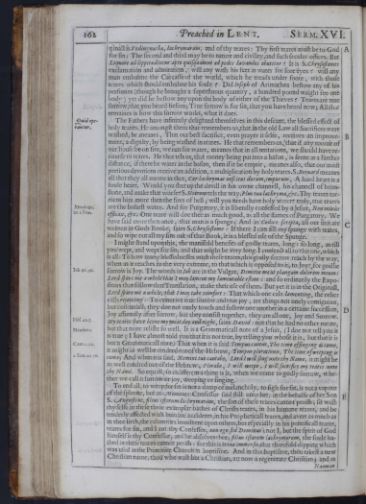 162
Preached in Lent.
Serm. XVI.
ginall is Vedingnacha, lachrymarum, and of thy teares: Thy first teares must be to God
162
Preached in Lent.
Serm. XVI.
ginall is Vedingnacha, lachrymarum, and of thy teares: Thy first teares must be to God
for sin: The second and third may be to nature and civility, and such secular offices. But
Liquore ad lippitudinem apto quisquamne ad pedes lavandos abutetur? It is S. Chrysostomes
exclamation and admiration, will any wash his feet in water for sore eyes? will any
man embalme the Carcasse of the world, which he treads under foote, with those
teares which should embalme his soule? Did Ioseph of Arimathea bestow any of his
perfumes (though he brought a superfluous quantity, a hundred pound waight for one
body) yet did he bestow any upon the body of either of the Thieves? Teares are true
sorrow, that you heard before; True sorrow is for sin, that you have heard now; All that
remaines is how this sorrow works, what is does.
Quid ope-
rantur. The Fathers have infinitely delighted themselves in this descant, the blessed effect of
holy teares. He amongst them that remembers us, that in the old Law all Sacrifices were
washed, he meanes, That our best sacrifice, even prayer it selfe, receives an improve-
ment, a dignity, by being washed in teares. He that remembers us, that if any roome of
our house be on fire, we run for water, meanes that in all tentations, we should have re-
course to teares. He that tels us, that money being put into a bason, is seene at a farther
distance, if there be water in the bason, then if it be emptie, meanes also, that our most
pretious devotions receive an addition, a multiplication by holy teares. S. Bernard meanes
all that they all meane in that, Cor lachrymas nesciens durum, impurum, A hard heart is a
foule heart. Would you shut up the devill in his owne channell, his channell of brim-
stone, and make that worse? S. Hierom tels the way, Plus tua lachryma, &c. Thy teares tor-
ment him more then the fires of hell; will you needs have holy water? truly, true teares
are the holiest water.Mendoza.
in 1. Sam. And for Purgatory, it is liberally confessed by a Jesuit, Non minùs
efficax, &c. One teare will doe thee as much good, as all the flames of Purgatory. We
have said more then once, that man is a spunge; And in Codice scripta, all our sins are
written in Gods Booke, saies S. Chrysostome: If there I can fill my spunge with teares,
and so wipe out all my sins out of that Book, it is a blessed use of the Spunge.
I might stand upon this, the manifold benefits of godly teares, long: so long, as till
you wept, and wept for sin; and that might be very long. I contract all to this one, which
is all: To how many blessednesses must these teares, this godly sorrow reach by the way,
when as it reaches to the very extreme, to that which is opposed to it, to Joy? for godlie
sorrow is Joy. The words in Iob are in the Vulgat, Iob 10.20. Dimitte me ut plangam dolorem meum:
Lord spare me a while that I may lament my lamentable estate: and so ordinarily the Expo-
sitors that follow that Translation, make their use of them. But yet it is in the Originall,
Lord spare me a while, that I may take comfort: That which one cals lamenting, the other
calls rejoycing: To conceive true sorrow and true joy, are things not onely contiguous,
but continuall; they doe not onely touch and follow one another in a certaine succession,
Joy assuredly after sorrow, but they consist together, they are all one, Joy and Sorrow.
My teares have beene my meat day and night, Psal. 42.3. saies David: not that he had no other meate,
but that none relisht so well. It is a Grammaticall note of a Jesuit, Mendoza. (I doe not tell you it
is true; I have almost told you that it is not true, by telling you whose it is, but that it is
but a Grammaticall note) That when it is said Tempus cantus, The time of singing is come, Cant. 2.12.
it might as well be rendred out of the Hebrew, Tempus plorationis, The time of weeping is
come; And when it is said, Nomini tuo cantabo, Lord I will sing unto thy Name, 2 Sam. 22.50. it might be
as well rendred out of the Hebrew, Plorabo, I will weepe, I will sacrifice my teares unto
thy Name. So equall, so indifferent a thing is it, when we come to godly sorrow, whe-
ther we call it sorrow or joy, weeping or singing.
To end all, to weep for sin is not a damp of melancholy, to sigh for sin, is not a vapour
of the spleene, but as Monicaes Confessor said still unto her, in the behalfe of her Son
S. Augustine, filius istarum lachrymarum, the son of these teares cannot perish; so wash
thy selfe in these three examplar bathes of Christs teares, in his humane teares, and be
tenderly affected with humane accidents, in his Propheticall teares, and avert as much as
in thee lieth, the calamities imminent upon others, but especially in his pontificall teares,
teares for sin, and I am thy Confessor, non ego, sed Dominus; not I, but the spirit of God
himself is thy Confessor, and he absolves thee, filius istarum lachrymarum, the soule ba-
thed in these teares cannot perish: for this is trina immersio, that threefold dipping which
was used in the Primitive Church in baptisme. And in this baptisme, thou takest a new
Christian name, thou who wast but a Christian, art now a regenerate Christian; and as Naaman
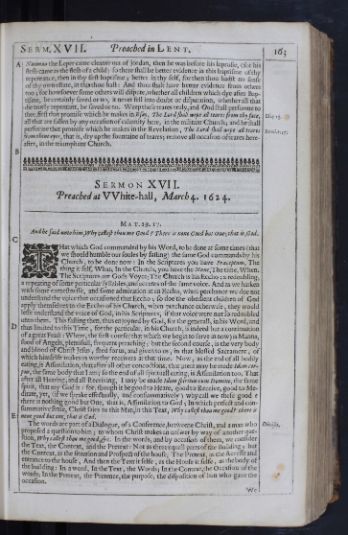 Serm. XVII.
Preached in Lent.
163
Naaman the Leper came cleaner out of Jordan, then he was before his leprosie, (for his
Serm. XVII.
Preached in Lent.
163
Naaman the Leper came cleaner out of Jordan, then he was before his leprosie, (for his
flesh came as the flesh of a child) so there shall be better evidence in this baptisme of thy
repentance, then in thy first baptisme; better in thy self, for then thou hadst no sense
of thy own estate, in this thou hast: And thou shalt have better evidence from others
too; for howsoever some others will dispute, whether all children which dye after Bap -
tisme, be certainly saved or no, it never fell into doubt or disputation, whether all that
die truely repentant, be saved or no. Weep these teares truly, and God shall performe to
thee, first that promise which he makes in Esay, The Lord shall wipe all teares from thy face, Esay 25.
all that are fallen by any occasion of calamity here, in the militant Church; and he shall
performe that promise which he makes in the Revelation, Revel. 7.17. The Lord shall wipe all teares
from thine eyes, that is, dry up the fountaine of teares; remove all occasion of teares here -
after, in the triumphant Church.
Sermon XVII.
Preached at VVWhite-hall, March 4. 1624.
Mat. 19.17.
And he said unto him, Why callest thou me Good? There is none Good but One; that is, God.
THatThat which God commanded by his Word, to be done at some times (that
we should humble our soules by fasting) the same God commands by his
Church, to be done now: In the Scriptures you have Præceptum, The
thing it self, What; In the Church, you have the Nunc, The time, When.
The Scriptures are Gods Voyce; The Church is his Eccho; a redoubling,
a repeating of some particular syllables, and accents of the same voice. And as we harken
with some earnestnesse, and some admiration at an Eccho, when perchance we doe not
understand the voice that occasioned that Eccho; so doe the obedient children of God
apply themselves to the Eccho of his Church, when perchance otherwise, they would
lesse understand the voice of God, in his Scriptures, if that voice were not so redoubled
unto them. This fasting then, thus enjoyned by God, for the generall, in his Word, and
thus limited to this Time, for the particular, in his Church, is indeed but a continuation
of a great Feast: Where, the first course (that which we begin to serve in now) is Manna,
food of Angels, plentifull, frequent preaching; but the second course, is the very body
and blood of Christ Jesus, shed for us, and given to us, in that blessed Sacrament, of
which himselfe makes us worthy receivers at that time. Now, as the end of all bodily
eating, is Assimilation, that after all other concoctions, that meat may be made Idem cor-
pus, the same body that I am; so the end of all spirituall eating, is Assimilation too, That
after all Hearing, and all Receiving, I may be made Idem spiritus cum Domino, the same
spirit, that my God is: for, though it be good to Heare, good to Receive, good to Me-
ditate, yet, (if we speake effectually, and consummatively) why call we these good?
there is nothing good but One, that is, Assimilation to God; In which perfect and con-
summative sense, Christ saies to this Man, in this Text, Why callest thou me good? there is
none good but one, that is God. Divisio. The words are part of a Dialogue, of a Conference, betweene Christ, and a man who
proposed a question to him; to whom Christ makes an answer by way of another que-
stion, Why callest thou me good, &c. In the words, and by occasion of them, we consider
the Text, the Context, and the Pretext: Not as three equall parts of the Building; but
the Context, as the situation and Prospect of the house, The Pretext, as the Accesse and
entrance to the house, And then the Text it selfe, as the House it selfe, as the body of
the building: In a word, In the Text, the Words; In the Context, the Occasion of the
words; In the Pretext, the Pretence, the purpose, the disposition of him who gave the
occasion. We
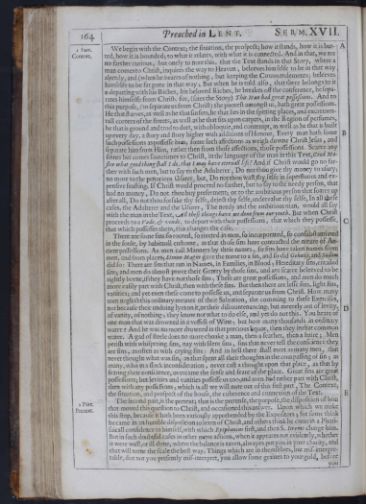 164
Preached in Lent.
Serm. XVII.
We begin with the Context;1 Part.
164
Preached in Lent.
Serm. XVII.
We begin with the Context;1 Part.Context. the situation, the prospect; how it stands, how it is but-
ted, how it is bounded; to what it relates, with what it is connected. And in that, we are
no farther curious, but onely to note this, that the Text stands in that Story, where a
man comes to Christ, inquires the way to Heaven, beleeves himselfe to be in that way
already, and (when he heares of nothing, but keeping the Commandements) beleeves
himselfe to be far gone in that way; But when he is told also, that there belongs to it
a departing with his Riches, his beloved Riches, he breakes off the conference, he sepa-
rates himselfe from Christ; for, (saies the Story) This Man had great possessions. And to
this purpose, (to separate us from Christ) the poorest amongst us, hath great possessions.
He that starves, as well as he that surfets, he that lies in the spitting places, and excremen-
tall corners of the streets, as well as he that sits upon carpets, in the Region of perfumes,
he that is ground and trod to durt, with obloquie, and contempt, as well as he that is built
up every day, a story and story higher with additions of Honour, Every man hath some
such possessions as possesse him, some such affections as weigh downe Christ Jesus, and
separate him from Him, rather then from those affections, those possessions. Scarce any
sinner but comes sometimes to Christ, in the language of the man in this Text, Good Ma-
ster what good thing shall I do, that I may have eternall life? And if Christ would go no far-
ther with such men, but to say to the Adulterer, Do not thou give thy money to usury;
no more to the penurious Usurer, but, Do not thou wast thy selfe in superfluous and ex-
pensive feasting; If Christ would proceed no farther, but to say to the needy person, that
had no money, Do not thou buy preferment; or to the ambitious person that soares up
after all, Do not thou forsake thy selfe, deject thy selfe, undervalue thy selfe, In all these
cases, the Adulterer and the Usurer, The needy and the ambitious man, would all say
with the man in the Text, All these things have we done from our youth. But when Christ
proceeds to a Vade, & vende, to depart with their possessions, that which they possesse,
that which possesses them, this changes the case. There are some sins so rooted, so riveted in men, so incorporated, so consubstantiated
in the soule, by habituall custome, as that those sins have contracted the nature of An-
cient possessions. As men call MannersManours by their names, so sins have taken names from
men, and from places; Simon Magus gave the name to a sin, and so did Gehazi, and Sodom
did so: There are sins that run in Names, in Families, in Blood; Hereditary sins, entailed
sins; and men do almost prove their Gentry by those sins, and are scarce beleeved to be
rightly borne, if they have not those sins; These are great possessions, and men do much
more easily part with Christ, then with these sins. But then there are lesse sins, light sins,
vanities; and yet even these come to possesse us, and separate us from Christ. How many
men neglect this ordinary meanes of their Salvation, the comming to these Exercises,
not because their undoing lyes on it, or their discountenancing; but meerely out of levity,
of vanity, of nothing; they know not what to do else, and yet do not this. You heare of
one man that was drowned in a vessell of Wine; but how many thousands in ordinary
water? And he was no more drowned in that precious liquor, then they in that common
water. A gad of steele does no more choake a man, then a feather, then a haire; Men
perish with whispering sins, nay with silent sins, sins that never tell the conscience they
are sins, as often as with crying sins: And in hell there shall meet as many men, that
never thought what was sin, as that spent all their thoughts in the compassing of sin; as
many, who in a slack inconsideration, never cast a thought upon that place, as that by
searing their conscience, overcame the sense and feare of the place. Great sins are great
possessions; but levities and vanities possesse us too; and men had rather part with Christ,
then with any possessions; which is all we will note out of this first part, The Context,
the situation, and prospect of the house, the coherence and connexion of the Text. The second part, 2 Part.
Pretext. is the pretext; that is the pretense, the purpose, the disposition of him
that moved this question to Christ, and occasioned this answer. Upon which we make
this stop, because it hath been variously apprehended by the Expositors; for some think
he came in an humble disposition to learn of Christ, and others think he came in a Phari-
saicall confidence in himself, with which Epiphanius first, and then S. Ierome charge him.
But in such doubtful cases in other mens actions, when it appeares not evidently, whether
it were well, or ill done, where the balance is eaven, alwayes put you in your charity, and
that will turne the scale the best way. Things which are in themselves, but mis-interpre-
table, doe not you presently mis-interpret, you allow some graines to your gold, before you
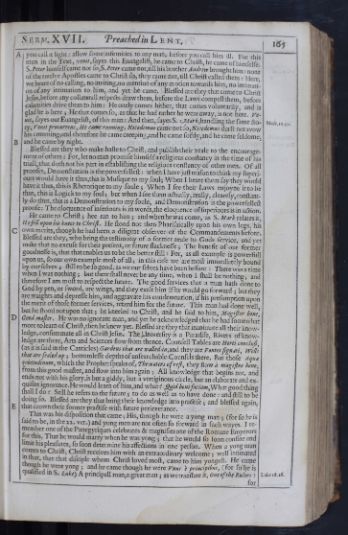 Serm. XVII.
Preached in Lent.
165
you call it light: allow some infirmities to any man, before you call him ill. For this
Serm. XVII.
Preached in Lent.
165
you call it light: allow some infirmities to any man, before you call him ill. For this
man in the Text, venit, sayes this Euangelist, he came to Christ, he came of himselfe.
S. Peter himself came not so, S. Peter came not, till his brother Andrew brought him: none
of the twelve Apostles came to Christ so, they came not, till Christ called them: Here,
we heare of no calling, no inviting, no mention of any motion towards him, no intimati-
on of any intimation to him, and yet he came. Blessed are they that come to Christ
Jesus, before any collaterall respects draw them, before the Laws compell them, before
calamities drive them to him: He onely comes hither, that comes voluntarily, and is
glad he is here; He that comes so, as that he had rather he were away, is not here. Ve-
nit, sayes our Euangelist, of this man: And then, sayes S. Mark, Mark. 10.17. handling the same sto-
ry, Venit procurrens, He came running. Nicodemus came not so, Nicodemus durst not avow
his comming; and therefore he came creeping, and he came softly, and he came seldome,
and he came by night. Blessed are they who make haste to Christ, and publish their zeale to the encourage-
ment of others: For, let no man promise himself a religious constancy in the time of his
triall, that doth not his part in establishing the religious constancy of other men. Of all
proofes, Demonstration is the powerfullest: when I have just reason to think my superi-
ours would have it thus, this is Musique to my soul; When I heare them say they would
have it thus, this is Rhetorique to my soule; When I see their Laws enjoyne it to be
thus, this is Logick to my soul; but when I see them actually, really, clearely, constant-
ly do thus, this is a Demonstration to my soule, and Demonstration is the powerfullest
proofe: The eloquence of inferiours is in words, the eloquence of superiours is in action. He came to Christ; hee ran to him; and when he was come, as S. Mark relates it,
He fell upon his knees to Christ. He stood not then Pharisaically upon his own legs, his
own merits, though he had been a diligent observer of the Commandements before.
Blessed are they, who bring the testimony of a former zeale to Gods service, and yet
make that no excuse for their present, or future slackness; The benefit of our former
goodnesse is, that that enables us to be the better still: For, as all example is powerfull
upon us, so our own example most of all; in this case we are most immediately bound
by ourselves; still to be so good, as we our selves have been before: There was a time
when I was nothing; but there shall never be any time, when I shall be nothing; and
therefore I am most to respect the future. The good services that a man hath done to
God by pen, or sword, are wings, and they exalt him if he would go forward; but they
are waights and depresse him, and aggravate his condemnation, if his presumption upon
the merit of those former services, retard him for the future. This man had done well,
but he stood not upon that; he kneeled to Christ, and he said to him, Magister bone,
Good master. He was no ignorant man, and yet he acknowledged that he had somewhat
more to learn of Christ, then he knew yet. Blessed are they that inanimate all their know-
ledge, consummate all in Christ Jesus. The University is a Paradise, Rivers of know-
ledge are there, Arts and Sciences flow from thence. Counsell Tables are Horti conclusi,
(as it is said in the Canticles) Gardens that are walled in, and they are Fontes signati, Wells
that are sealed up; bottomlesse depths of unsearchable Counsels there. But those Aquæ
quietudinum, which the Prophet speaks of, The waters of rest, they flow à magistro bono,
from this good master, and flow into him again; All knowledge that begins not, and
ends not with his glory, is but a giddy, but a vertiginous circle, but an elaborate and ex-
quisite ignorance. He would learn of him, and what? Quid boni faciam, What good thing
shall I do? Still he refers to the future; to do as well as to have done: and still to be
doing so. Blessed are they that bring their knowledge into practise; and blessed again,
that crown their former practise with future perseverance. This was his disposition that came; His, though he were a yong man; (for so he is
said to be, in the 22. ver.) and yong men are not often so forward in such wayes. I re-
member one of the Panegyriques celebrates & magnifies one of the Romane Emperors
for this, That he would marry when he was yong; that he would so soon confine and
limit his pleasures, so soon determine his affections in one person. When a yong man
comes to Christ, Christ receives him with an extraordinary welcome; well intimated
in that, that that disciple whom Christ loved most, came to him yongest. He came
though he were yong; and he came though he were Vnus è principibus, (for so he is
qualified in S. Luke) A principall man, a great man; as we translate it, One of the Rulers:Luke 18.18. for
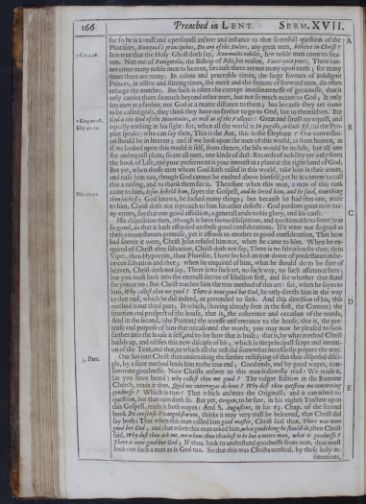 166
Preached in Lent.
Serm. XVII.
for so he is a reall and a personall answer and instance to that scornfull question of the
166
Preached in Lent.
Serm. XVII.
for so he is a reall and a personall answer and instance to that scornfull question of the
Pharisees, Nunquid è principibus, Do any of the Rulers, any great men, beleeve in Christ?
It is true that the Holy Ghost doth say, 1 Cor. 1.26. Non multi nobiles, few noble men come to hea-
ven. Not out of Panigorola, the Bishop of Asti, his reason, Pauci quia pauci, There can-
not come many noble men to heaven, because there are not many upon earth; for many
times there are many. In calme and peaceable times, the large favours of indulgent
Princes, in active and stirring times, the merit and the fortune of forward men, do often
enlarge the number. But such is often the corrupt inordinatenesse of greatnesse, that it
only carries them so much beyond other men, but not so much nearer to God; It only
sets men at a farther, not God at a nearer distance to them; but because they are come
to be called gods, they think they have no farther to go to God, but to themselves. But
God is the God of the Mountains, 1 King. 20.28. as well as of the Valleyes: Great and small are equall, and
equally nothing in his sight: for, when all the world is Esay 40.12. In pugillo, in Gods fist, (as the Pro-
phet speaks) who can say then, This is the Ant, this is the Elephant? Our conversati-
on should be in heaven; and if we look upon the men of this world, as from heaven, as
if we looked upon this world it self, from thence, the hils would be no hils, but all one
flat and equall plain; so are all men, one kinde of dust. Records of nobility are only from
the book of Life, and your preferment is your interest in a place at the right hand of God.
But yet, when those men whom God hath raised in this world, take him in their armes,
and raise him too, though God cannot be exalted above himself, yet he is content to call
this a raising, and to thank them for it. Therefore when this man, a man of this rank
came to him, Mar. 10.21. Iesus beheld him, sayes the Gospell, and he loved him, and he said, One thing
thou lackest; God knows, he lacked many things; but because he had that one, zeale
to him, Christ doth not reproach to him his other defects: God pardons great men ma-
ny errors, for that one good affection, a generall zeale to his glory, and his cause. His disposition then, (though it have seemed suspitious, and questionable to some) was
so good, as that it hath afforded us these good considerations. If it were not so good as
these circumstances promise, yet it affords us another as good consideration, That how
bad soever it were, Christ Jesus refused him not, when he came to him. When he en-
quired of Christ after salvation, Christ doth not say, There is no salvation for thee, thou
Viper, thou Hypocrite, thou Pharisee, I have locked an iron doore of predestination be-
tween salvation and thee; when he enquired of him, what he should do to be sure of
heaven, Christ doth not say, There is no such art, no such way, no such assurance here;
but you must look into the eternall decree of Election first, and see whether that stand
for you or no: But Christ teaches him the true method of this art: for, when he sayes to
him, Why callest thou me good? There is none good but God, he only directs him in the way
to that end, which he did indeed, or pretended to seek. And this direction of his, this
method is our third part; In which, (having already seen in the first, the Context) the
situation and prospect of the house, that is, the coherence and occasion of the words,
And in the second, (the Pretext) the accesse and entrance to the house, that is, the pre-
tense and purpose of him that occasioned the words, you may now be pleased to look
farther into the house it self, and to see how that is built; that is, by what method Christ
builds up, and edifies this new disciple of his; which is the principall scope and intenti-
on of the Text, and that, to which all the rest did somewhat necessarily prepare the way. 3. Part. Our Saviour Christ thus undertaking the farther rectifying of this thus disposed disci-
ple, by a faire method leads him to the true end; Good ends, and by good wayes, con-
summate goodnesse. Now Christs answer to this man is diversly read: We reade it,
(as you have heard) why callest thou me good? The vulgat Edition in the Romane
Church, reads it thus, Quid me interrogas de bono? Why dost thou question me concerning
goodnesse? Which is true? That which answers the Originall; and it can admit no
question, but that ours doth so. But yet, Origen, to be sure, in his eighth Tractate upon
this Gospell, reads it both wayes: And S. Augustine, in his 63. Chap. of the second
book De consensu Evangelist arum, thinks it may very well be beleeved, that Christ did
say both: That when this man called him good master, Christ said then, There was none
good but God; and that when this man asked him, what good thing he should do, then Christ
said, Why dost thou ask me, me whom thou thinkest to be but a meere man, what is goodnesse?
There is none good but God; If thou look to understand goodnesse from man, thou must
look out such a man as is God too. So that this was Christs method, by these holy in-
sinuations,
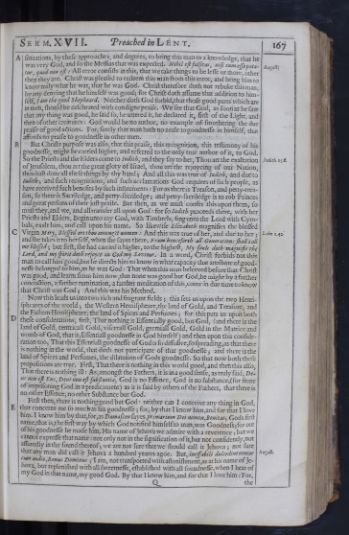 Serm. XVII.
Preached in Lent.
167
sinuations, by these approaches, and degrees, to bring this man to a knowledge, that he
Serm. XVII.
Preached in Lent.
167
sinuations, by these approaches, and degrees, to bring this man to a knowledge, that he
was very God, and so the Messias that was expected. August. Nihil est falsitas, nisi cum esse puta-
tur, quod non est: All error consists in this, that we take things to be lesse or more, other
then they are. Christ was pleased to redeem this man from this error, and bring him to
know truly what he was, that he was God. Christ therefore doth not rebuke this man,
by any denying that he himself was good; for Christ doth assume that addition to him-
self, I am the good Shepheard. Neither doth God forbid, that those good parts which are
in men, should be celebrated with condigne praise. We see that God, as soon as he saw
that any thing was good, he said so, he uttered it, he declared it, first of the Light, and
then of other creatures: God would be no author, no example of smothering the due
praise of good actions. For, surely that man hath no zeale to goodnesse in himself, that
affords no praise to goodnesse in other men. But Christs purpose was also, that this praise, this recognition, this testimony of his
goodnesse, might be carried higher, and referred to the only true author of it, to God.
So the Priests and the Elders come to Iudith, and they say to her, Judith 15.8. Thou art the exaltation
of Jerusalem, thou art the great glory of Israel, thou art the rejoycing of our Nation,
thou hast done all these things by thy hand; And all this was true of Iudith, and due to
Iudith; and such recognitions, and such acclamations God requires of such people, as
have received such benefits by such instruments: For as there is Treason, and petty-trea-
son, so there is Sacriledge, and petty-sacriledge; and petty-sacriledge is to rob Princes
and great persons of their just praise. But then, as we must confer this upon them, so
must they, and we, and all transfer all upon God: for so Iudith proceeds there, with her
Priests and Elders, Begin unto my God, with Timbrels, sing unto the Lord with Cym-
bals, exalt him, and call upon his name. So likewise Elizabeth magnifies the blessed
Virgin Mary, Blessed art thou amongst women:Luke 1.42. And this was true of her, and due to her;
and she takes it to her self, when she sayes there, From henceforth all Generations shall call
me blessed; but first, she had carried it higher, to the highest, My soule doth magnifie the
Lord, and my spirit doth rejoyce in God my Saviour. In a word, Christ forbids not this
man to call him good, but he directs him to know in what capacity that attribute of good-
nesse belonged to him, as he was God: That when this man beleeved before that Christ
was good, and learnt from him now, that none was good but God, he might by a farther
concoction, a farther rumination, a farther meditation of this, come in due time to know
that Christ was God; And this was his Method. Now this leads us into two rich and fragrant fields; this sets us upon the two Hemi-
spheares of the world; the Western Hemispheare, the land of Gold, and Treasure, and
the Eastern Hemispheare, the land of Spices and Perfumes; for this puts us upon both
these considerations, first, That nothing is Essentially good, but God, (and there is the
land of Gold, centricall Gold, viscerall Gold, gremiall Gold, Gold in the Matrice and
womb of God, that is, Essentiall goodnesse in God himself) and then upon this conside-
ration too, That this Essentiall goodnesse of God is so diffusive, so spreading, as that there
is nothing in the world, that doth not participate of that goodnesse; and there is the
land of Spices and Perfumes, the dilatation of Gods goodnesse. So that now both these
propositions are true, First, That there is nothing in this world good, and then this also,
That there is nothing ill: As, amongst the Fathers, it is in a good sense, as truly said, De-
us non est Ens, Deus non est substantia, God is no Essence, God is no substance, (for feare
of imprisoning God in a predicament) as it is said by others of the Fathers, that there is
no other Essence, no other Substance but God. First then, there is nothing good but God: neither can I conceive any thing in God,
that concerns me so much as his goodnesse; for, by that I know him, and for that I love
him. I know him by that, for, as Damascen sayes, primarium Dei nomen, Bonitas; Gods first
name, that is, the first way by which God notified himself to man, was Goodness; for out
of his goodnesse he made him. His name of Jehova we admire with a reverence; but we
cannot expresse that name: not only not in the signification of it, but not considently, not
assuredly in the sound thereof; we are not sure that we should call it Jehova; not sure
that any man did call it Jehova a hundred yeares agoe. But, August. ineffabili dulcedine teneor
cum audio, Bonus Dominus; I am, not transported with astonishment, as at his name of Je-
hova, but replenished with all sweetnesse, established with all soundnesse, when I hear of
my God in that name, my good God. By that I know him, and for that I love him: For, Q the
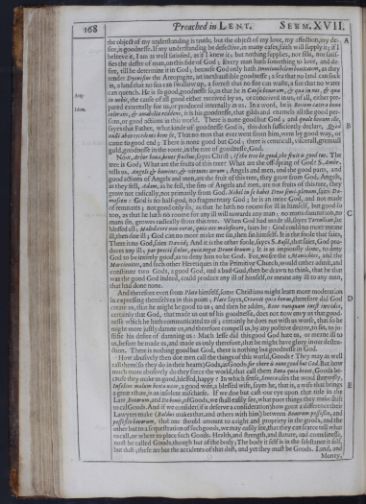 168
Preached in Lent.
Serm. XVII.
the object of my understanding is truth; but the object of my love, my affection, my de-
168
Preached in Lent.
Serm. XVII.
the object of my understanding is truth; but the object of my love, my affection, my de-sire, is goodnesse. If my understanding be defective, in many cases, faith will supply it; if I
beleeve it, I am as well satisfied, as if I knew it; but nothing supplies, nor fills, nor satis-
fies the desire of man, on this side of God; Every man hath something to love, and de-
sire, till he determine it in God; because God only hath Imminuibilem bonitatem, as they
render Dyonisius the Areopagite, an inexhaustible goodnesse; a sea that no land can suck
in, a land that no sea can swallow up, a forrest that no fire can waste, a fire that no water
can quench.Aug. He is so good, goodnesse so, as that he is Causa bonorum, & quæ in nos, & quæ
in nobis, the cause of all good either received by us, or conceived in us; of all, either pre-
pared externally for us, Idem. or produced internally in us. In a word, he is Bonum cætera bona
colorans, & amabilia reddens, it is his goodnesse, that gilds and enamels all the good per-
sons, or good actions in this world. There is none good but God; and quale bonum ille,
sayes that Father, what kinde of goodnesse God is, this doth sufficiently declare, Quòd
nulli ab eo recedenti bene sit, That no man that ever went from him, went by good way, or
came to good end; There is none good but God; there is centricall, viscerall, gremiall
gold, goodnesse in the roote, in the tree of goodnesse, God. Now, Arbor bona, bonos fructus, sayes Christ; If the tree be good, the fruit is good too. The
tree is God; What are the fruits of this tree? What are the off-spring of God? S. Ambr.
tells us, Angeli & homines, & virtutes eorum; Angels and men, and the good parts, and
good actions of Angels and men, are the fruit of this tree, they grow from God. Angels,
as they fell, Adam, as he fell, the sins of Angels and men, are not fruits of this tree, they
grow not radically, not primarily from God. Nihil in se habet Deus semi-plenum, saies Da-
mascen: God is no half-god, no fragmentary God; he is an intire God, and not made
of remnants; not good only so, as that he hath no roome for ill in himself, but good so
too, as that he hath no roome for any ill will towards any man; no mans damnation, no
mans sin, growes radically from this tree. When God had made all, sayes Tertullian, he
blessed all; Maledicere non norat, quia nec malefacere, saies he: God could no more meane
ill, then doe ill; God can no more make me sin, then sin himself. It is the foole that saies,
There is no God, saies David; And it is the other foole, sayes S. Basil, that saies, God pro-
duces any ill; par precii scelus, quia negat Deum bonum; It is as impiously done, to deny
God to be intirely good, as to deny him to be God. For, we see the Manichees, and the
Marcionites, and such other Heretiques in the Primitive Church, would rather admit, and
constitute two Gods, a good God, and a bad God, then be drawn to think, that he that
was the good God indeed, could produce any ill of himself, or meane any ill to any man,
that had done none. And therefore even from Plato himself, some Christians might learn more moderation
in expressing themselves in this point; Plato sayes, Creavit quia bonus, therefore did God
create us, that he might be good to us; and then he addes, Bono nunquam inest invidia,
certainly that God, that made us out of his goodnesse, does not now envy us that good-
nesse which he hath communicated to us; certainly he does not wish us worse, that so he
might more justly damne us, and therefore compell us, by any positive decree, to sin, to ju-
stifie his desire of damning us: Much lesse did this good God hate us, or meane ill to
us, before he made us, and made us only therefore, that he might have glory in our destru-
ction. There is nothing good but God, there is nothing but goodnesse in God. How abusively then doe men call the things of this world, Goods? They may as well
call them (so they do in their hearts) Gods, as Goods; for there is none good but God. But how
much more abusively do they force the world, that call them Bona quia beant, Goods be-
cause they make us good, blessed, happy? In which sense, Seneca uses the word shrewdly,
Insolens malum beata uxor, a good wife, a blessed wife, sayes he, that is, a wife that brings
a great estate, is an insolent mischiefe. If we doe but cast our eye upon that title in the
Law, Bonorum, and De bonis, of Goods, we shall easily see, what poor things they make shift
to cal Goods. And if we consider (if it deserve a consideration) how great a difference their
Lawyers make (Baldus makes that, and others with him) between Bonorum possessio, and
possessio bonorum, that one should amount to a right and propriety in the goods, and the
other but to a sequestration of such goods, we may easily see, that they can scarce tell what
to call, or where to place such Goods. Health, and strength, and stature, and comelinesse,
must be called Goods, though but of the body; The body it self is in the substance it self,
but dust; these are but the accidents of that dust, and yet they must be Goods. Land, and Money,
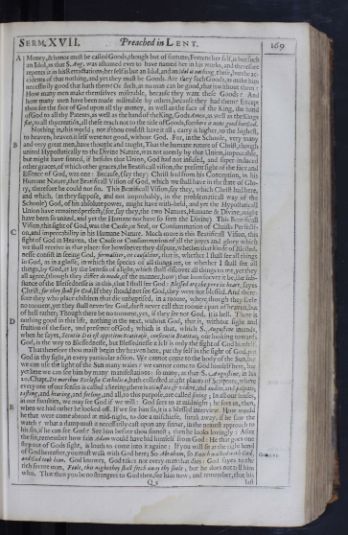 Serm. XVII.
Preached in Lent.
169
Money, & honor must be called Goods, though but of fortune; Fortune her self, is but such
Serm. XVII.
Preached in Lent.
169
Money, & honor must be called Goods, though but of fortune; Fortune her self, is but such
an Idol, as that S. Aug. was ashamed ever to have named her in his works, and therefore
repents it in his Retractations; her self is but an Idol, and an Idol is nothing, these, but the ac-
cidents of that nothing, and yet they must be Goods. Are they such Goods, as make him
necessarily good that hath them? Or such, as no man can be good, that is without them?
How many men make themselves miserable, because they want these Goods? And
how many men have been made miserable by others, because they had them? Except
thou see the face of God upon all thy money, as well as the face of the King, the hand
of God to all thy Patents, as well as the hand of the King, Gods Amen, as well as the Kings
fiat, to all thy creatiōs, all these reach not to the title of Goods, for there is none good but God. Nothing in this world; not if thou couldst have it all; carry it higher, to the highest,
to heaven; heaven it self were not good, without God. For, in the Schoole, very many
and very great men, have thought and taught, That the humane nature of Christ, though
united Hypostatically to the Divine Nature, was not meerly by that Union, impeccable,
but might have sinned, if besides that Union, God had not infused, and super-induced
other graces, of which other graces, the Beatificall vision, the present sight of the face and
Essence of God, was one: Because, (say they) Christ had from his Conception, in his
Humane Nature, that Beatificall Vision of God, which we shall have in the state of Glo-
ry, therefore he could not sin. This Beatificall Vision, say they, which Christ had here,
and which, (as they suppose, and not improbably, in the problematicall way of the
Schoole) God, of his absolute power, might have with-held, and yet the Hypostaticall
Union have remained perfect; (for, say they, the two Natures, Humane & Divine, might
have been so united, and yet the Humane not have so seen the Divine) This Beatificall
Vision, this sight of God, was the Cause, or Seal, or Consummation of Christs Perfecti-
on, and impeccability in his Humane Nature. Much more is this Beatificall Vision, this
sight of God in Heaven, the Cause or Consummation of all the joyes and glory which
we shall receive in that place: for howsoever they dispute, whether that kinde of Blessed-
nesse consist in seeing God, formaliter, or causaliter, that is, whether I shall see all things
in God, as in a glasse, in which the species of all things are, or whether I shall see all
things, by God, as by the benefit of a light, which shall discover all things to me, yet they
all agree, (though they differ de modo, of the manner, how) that howsoever it be, the sub-
stance of the Blessednesse is in this, that I shall see God: Blessed are the pure in heart, sayes
Christ, for they shall see God; If they should not see God, they were not blessed. And there-
fore they who place children that die unbaptised, in a roome, where though they feele
no torment, yet they shall never see God, durst never call that roome a part of heaven, but
of hell rather; Though there be no torment, yet, if they see not God, it is hell. There is
nothing good in this life, nothing in the next, without God, that is, without sight and
fruition of the face, and presence of God; which is that, which S. Augustine intends,
when he sayes, Secutio Dei est appetitus Beatitatis, consecutio Beatitas; our looking towards
God, is the way to Blessednesse, but Blessednesse it self is only the sight of God himself. That therefore thou maist begin thy heaven here, put thy self in the sight of God, put
God in thy sight, in every particular action. We cannot come to the body of the Sun, but
we can use the light of the Sun many waies: we cannot come to God himself here, but
yet here we can see him by many manifestations: so many, as that S. Augustine, in his
20. Chapt. De moribus Ecclesiæ Catholicæ, hath collected aright places of Scripture, where
every one of our senses is called a Seeing; there is a Gustate & videte, and audite, and palpate;
tasting, and hearing, and feeling, and all, to this purpose, are called seeing; In all our senses,
in our faculties, we may see God if we will: God sees us at midnight; he sees us, then,
when we had rather he looked off. If we see him so, it is a blessed interview. How would
he that were come abroad at mid-night, to doe a mischiefe, sneak away, if he saw the
watch? what a damp must it necessarily cast upon any sinner, in the nearest approach to
his sin, if he can see God? See him before thou sinnest; then he looks lovingly: After
the sin, remember how fain Adam would have hid himself from God: He that goes one
step out of Gods sight, is loath to come into it againe: If you will sit at the right hand
of God hereafter, you must walk with God here; So Abraham, so Gen. 5.25. Enoch walked with God,
and God took him. God knowes, God takes not every man that dies: God sayes to the
rich secure man, Foole, this night they shall fetch away thy soule; but he does not tell him
who. That then you be no strangers to God then, see him now; and remember, that his Q2 last
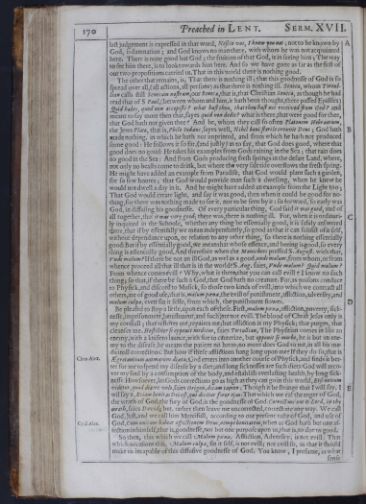 170
Preached in Lent.
Serm. XVII.
last judgement is expressed in that word, Nescio vos, I know you not; not to be known by
170
Preached in Lent.
Serm. XVII.
last judgement is expressed in that word, Nescio vos, I know you not; not to be known by
God, is damnation; and God knows no man there, with whom he was not acquainted
here. There is none good but God; the fruition of that God, is in seeing him; The way
to see him there, is to look towards him here. And so we have gone as far as the first of
our two propositions carried us, That in this world there is nothing good. The other that remains, is, That there is nothing ill; that this goodnesse of God is so
spread over all, (all actions, all persons) as that there is nothing ill. Seneca, whom Tertul-
lian calls still Senecam nostram, our Seneca, that is, that Christian Seneca, as though he had
read that of S Paul, (between whom and him, it hath been thought, there passed Epistles)
Quid habes, quod non accepisti? what hast thou, that thou hast not received from God? and
meant to say more then that, sayes quid non dedit? what is there, that were good for thee,
that God hath not given thee? And he, whom they call so often Platonem Hebræorum,
the Jews Plato, that is, Philo Iudæus, sayes well, Nihil boni sterile creavit Deus; God hath
made nothing, in which he hath not imprinted, and from which he hath not produced
some good: He follows it so far, (and justly) as to say, that God does good, where that
good does no good: He takes his examples from Gods raining in the Sea; that rain does
no good in the Sea: And from Gods producing fresh springs in the desart Land, where,
not only no beasts come to drink, but where the very salt tide overflows the fresh spring.
He might have added an example from Paradise, that God would plant such a garden,
for so few houres; that God would provide man such a dwelling, when he knew he
would not dwell a day in it. And he might have added an example from the Light too;
That God would create light, and say it was good, then when it could be good for no-
thing, for there was nothing made to see it, nor to be seen by it: so forward, so early was
God, in diffusing his goodnesse. Of every particular thing, God said it was good, and of
all together, that it was very good; there was, there is nothing ill. For, when it is ordinari-
ly inquired in the Schoole, whether any thing be essentially good, it is safely answered
there, that if by essentially we mean independantly, so good as that it can subsist of it self,
without dependance upon, or relation to any other thing, so there is nothing essentially
good: But if by essentially good, we mean that whose essence, and beeing is good, so every
thing is essentially good. And therefore when the Manichees pressed S. August. with that,
Vnde malum? If there be not an ill God, as wel as a good, unde malum, from whom, or from
whence proceed all that ill that is in the world? S. Aug. saies, Vnde malum? Quid malum?
From whence comes evill? Why, what is there, that you can call evill? I know no such
thing; so that, if there be such a God, that God hath no creature. For, as poisons conduce
to Physick, and discord to Musick, so those two kinds of evill, into which we contract all
others, are of good use, that is, malum pœnæ, the evill of punishment, affliction, adversity, and
malum culpæ, even sin it selfe, from which, the punishment flowes. Be pleased to stop a little, upon each of these. First, malum pœnæ, affliction, poverty, sick-
nesse, imprisonment, banishment, and such, are not evill. The blood of Christ Jesus only is
my cordiall; that restores me, repaires me; but affliction is my Physick; that purges, that
cleanses me. Hostiliter se opponit medicus, saies Tertullian, The Physitian comes in like an
enemy, with a knife to launce, with fire to cauterize, but opponit se morbo, he is but an ene-
my to the disease, he means the patient no harm; no more does God to me, in all his me-
dicinall corrections. But how if these afflictions hang long upon me? If they do so, that is
Ægrotantium animarum diæta;Clem. Alex. God enters into another course of Physick, and finds it bet-
ter for me to spend my disease by a diet; and long sicknesses are such diets: God will reco-
ver my soul by a consumption of the body, and establish everlasting health, by long sick-
nesse. Howsoever, let Gods corrections go as high as they can go in this world, Etsi novum
videtur, quod dicere volo, saies Origen, dicam tamen; Though it be strange that I will say, I
wil say it, Etiam bonitas Dei est, qui dicitur furor ejus; That which we cal the anger of God,
the wrath of God, the fury of God, is the goodnesse of God. Correct me not O Lord, in thy
wrath, saies David; but, rather then leave me uncorrected, correct me any way. We call
God, Just, and we call him Mercifull, according to our present taste of God, and use of
God, Cyril. Alex. Cum unicam habeat affectionem Deus, nempe bonitatem, when as God hath but one af-
fection in himself, that is, goodnesse, nor but one purpose upon us, that is, to doe us good. So then, this which we call Malum pœnæ, Affliction, Adversity, is not evill; That
which occasions this, Malum culpæ, sin it self, is not evill; not evill so, as that it should
make us incapable of this diffusive goodnesse of God. You know, I presume, in what sense
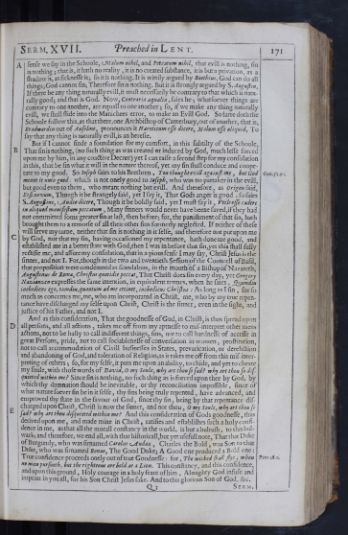 Serm. XVII.
Preached in Lent.
171
sense we say in the Schoole, Malum nihil, and Peccatum nihil, that evill is nothing, sin
Serm. XVII.
Preached in Lent.
171
sense we say in the Schoole, Malum nihil, and Peccatum nihil, that evill is nothing, sin
is nothing; that is, it hath no reality, it is no created substance, it is but a privation, as a
shadow is, as sicknesse is; so it is nothing. It is wittily argued by Boethius, God can do all
things; God cannot sin; Therefore sin is nothing. But it is strongly argued by S. Augustin,
If there be any thing naturally evill, it must necessarily be contrary to that which is natu-
rally good; and that is God. Now, Contraria æqualia, saies he; whatsoever things are
contrary to one another, are equall to one another; so, if we make any thing naturally
evill, we shall slide into the Manichees error, to make an Evill God. So farre doth the
Schoole follow this, as that there, one Archbishop of Canterbury, out of another, that is,
Bradwardin out of Anselme, pronounces it Hæreticum esse dicere, Malum esse aliquid, To
say that any thing is naturally evill, is an heresie. But if I cannot finde a foundation for my comfort, in this subtilty of the Schoole,
That sin is nothing, (no such thing as was created or induced by God, much lesse forced
upon me by him, in any coactive Decree) yet I can raise a second step for my consolation
in this, that be sin what it will in the nature thereof, yet my sin shall conduce and coope-
rate to my good. So Ioseph saies to his Brethren, Gen. 51.20. You thought evill against me, but God
meant it unto good: which is not onely good to Ioseph, who was no partaker in the evill,
but good even to them, who meant nothing but evill. And therefore, as Origen said,
Etsi novum, Though it be strangely said, yet I say it, That Gods anger is good; so saies
S. Augustine, Audeo dicere, Though it be boldly said, yet I must say it, Vtile esse cadere
in aliquod manifestum peccatum, Many sinners would never have beene saved, if they had
not committed some greater sin at last, then before; for, the punishment of that sin, hath
brought them to a remorse of all their other sins formerly neglected. If neither of these
will serve my turne, neither that sin is nothing in it selfe, and therefore not put upon me
by God, nor that my sin, having occasioned my repentance, hath done me good, and
established me in a better state with God, then I was in before that sin, yet this shall fully
rectifie me, and assure my consolation, that in a pious sense I may say, Christ Jesus is the
sinner, and not I. For, though in the two and twentieth Session of the Councell of Basil,
that proposition were condemned as scandalous, in the mouth of a Bishop of Nazareth,
Augustinus de Roma, Christus quotidie peccat, That Christ does sin every day, yet Gregory
Nazianzen expresses the same intention, in equivalent termes, when he saies, Quamdiu
inobediens ego, tamdiu, quantum ad me attinet, inobediens Christus: As long as I sin, for so
much as concernes me, me, who am incorporated in Christ, me, who by my true repen-
tance have discharged my selfe upon Christ, Christ is the sinner, even in the sight, and
justice of his Father, and not I. And as this consideration, That the goodnesse of God, in Christ, is thus spread upon
all persons, and all actions, takes me off from my aptnesse to mis-interpret other mens
actions, not to be hasty to call indifferent things, sins, not to call hardnesse of accesse in
great Persons, pride, not to call sociablenesse of conversation in women, prostitution,
not to call accommodation of Civill businesses in States, prevarication, or dereliction
and abandoning of God, and toleration of Religion; as it takes me off from this mis-inter-
preting of others; so, for my selfe, it puts me upon an ability, to chide, and yet to cheare
my soule, with those words of David, O my Soule, why art thou so sad? why art thou so dis-
quieted within me? Since sin is nothing, no such thing as is forced upon thee by God, by
which thy damnation should be inevitable, or thy reconciliation impossible, since of
what nature soever sin be in it selfe, thy sins being truly repented, have advanced, and
emproved thy state in the favour of God, since thy sin, being by that repentance dis-
charged upon Christ, Christ is now the sinner, and not thou, O my Soule, why art thou so
sad? why art thou disquieted within me? And this consideration of Gods goodnesse, thus
derived upon me, and made mine in Christ, ratifies and establishes such a holy confi-
dence in me, as that all the morall constancy in the world, is but a bulrush, to this bul-
wark; and therefore, we end all, with that historicall, but yet usefull note, That that Duke
of Burgundy, who was sirnamed Carolus Audax, Charles the Bold, was Son to that
Duke, who was sirnamed Bonus, The Good Duke; A Good one produced a Bold one:
True confidence proceeds onely out of true Goodnesse: for, Prov. 28.1. The wicked shall flye, when
no man pursueth, but the righteous are bold as a Lion. This constancy, and this confidence,
and upon this ground, Holy courage in a holy feare of him, Almighty God infuse and
imprint in you all, for his Son Christ Jesus sake. And to this glorious Son of God, &c. Q3 Serm
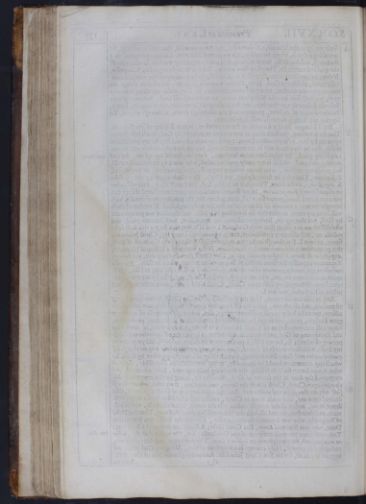
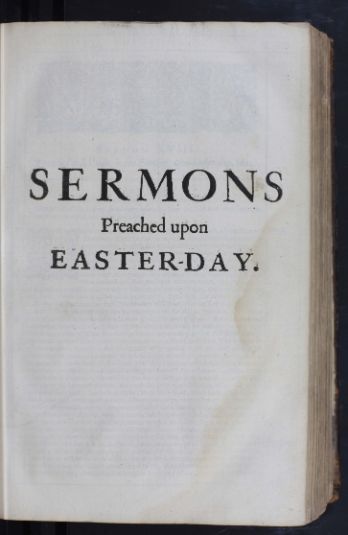
SERMONS
Preached upon
EASTER-DAY.
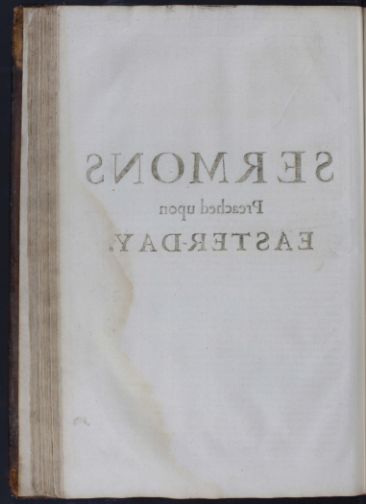
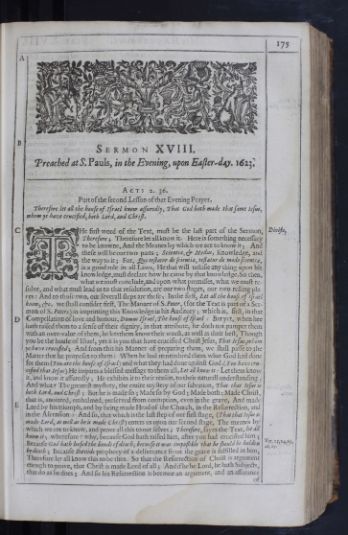 175
175
SERMON XVIII.
Preached at S. Pauls, in the Evening, upon Easter-day. 1623.
Acts 2.36.
Part of the second Lesson of that Evening Prayer.
Therefore let all the house of Israel know assuredly, That God hath made that same Iesus,
whom ye have crucified, both Lord, and Christ.
THeThe first word of the Text, must be the last part of the Sermon, Divisio.
Therefore; Therefore let all know it. Here is something necessary
to be knowne, And the Meanes by which we are to know it; And
these will be our two parts; Scientia, & Modus, Knowledge, and
the way to it; For, Qui testatur de scientia, testatur de modo scientiæ,
is a good rule in all Laws, He that will testifie any thing upon his
knowledge, must declare how he came by that knowledge. So then,
what we must conclude, and upon what premisses, what we must re-
solve, and what must lead us to that resolution, are our two stages, our two resting pla-
ces: And to those two, our severall steps are these; In the first, Let all the house of Israel
know, &c. we shall consider first, The Manner of S. Peter, (for the Text is part of a Ser-
mon of S. Peters) in imprinting this Knowledge in his Auditory; which is, first, in that
Compellation of love and honour, Domus Israel, The house of Israel: But yet, when hee
hath raised them to a sense of their dignity, in that attribute, he doth not pamper them
with an over-value of them, he lets them know their worst, as well as their best, Though
you be the house of Israel, yet it is you that have crucified Christ Jesus, That Iesus, whom
ye have crucified; And from this his Manner of preparing them, we shall passe to the
Matter that he proposes to them: When he had remembred them what God had done
for them (You are the house of Israel) and what they had done against God, (You have cru-
cified that Iesus) He imparts a blessed message to them all, Let all know it: Let them know
it, and know it assuredly; He exhibits it to their reason, to their naturall understanding,
And what? The greatest mystery, the entire mystery of our salvation, That that Iesus is
both Lord, and Christ; But he is made so; Made so by God; Made both; Made Christ,
that is, anointed, embalmed, preserved from corruption, even in the grave, And made
Lord by his triumph, and by being made Head of the Church, in the Resurrection, and
in the Ascension: And so, that which is the last step of our first stage, (That that Iesus is
made Lord, as well as he is made Christ) enters us upon our second stage, The meanes by
which we are to know, and prove all this to our selves; Therefore, sayes the Text, let all
know it; wherefore? why, because God hath raised him, after you had crucified him;Ver. 23, 24, 25,
26, 27.
Because God hath loosed the bands of death, because it was impossible that he should be holden
by death; Because Davids prophecy of a deliverance from the grave is fulfilled in him,
Therefore let all know this to be thus. So that the Resurrection of Christ is argument
enough to prove, that Christ is made Lord of all; And if he be Lord, he hath Subjects,
that do as he does; And so his Resurrection is become an argument, and an assurance of
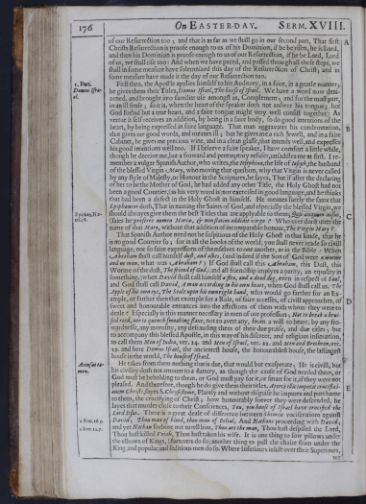 176
On Easter-day.
Serm. XVIII.
of our Resurrection too; and that is as far as we shall go in our second part, That first
176
On Easter-day.
Serm. XVIII.
of our Resurrection too; and that is as far as we shall go in our second part, That first
Christs Resurrection is proofe enough to us of his Dominion, if he be risen, he is Lord,
and then his Dominion is proofe enough to us of our Resurrection, if he be Lord, Lord
of us, we shall rise too: And when we have paced, and passed through all these steps, we
shall in some measure have solemnized this day of the Resurrection of Christ; and in
some measure have made it the day of our Resurrection too. First then, the Apostle applies himself to his Auditory, in a faire, in a gentle manner;1. Part.
he gives them their Titles, Domus Isra-
el. Domus Israel, The house of Israel. We have a word now deni-
zened, and brought into familiar use amongst us, Complement; and for the most part,
in an ill sense; so it is, when the heart of the speaker doth not answer his tongue; but
God forbid but a true heart, and a faire tongue might very well consist together: As
vertue it self receives an addition, by being in a faire body, so do good intentions of the
heart, by being expressed in faire language. That man aggravates his condemnation,
that gives me good words, and meanes ill; but he gives me a rich Jewell, and in a faire
Cabinet, he gives me precious wine, and in a clean glasse, that intends well, and expresses
his good intentions well too. If I beleeve a faire speaker, I have comfort a little while,
though he deceive me, but a froward and peremptory refuser, unsaddles me at first. I re-
member a vulgar Spanish Author, who writes, the Iosephina, the life of Ioseph, the husband
of the blessed Virgin Mary, who moving that question, why that Virgin is never called
by any style of Majesty, or Honour in the Scriptures, he sayes, That if after the declaring
of her to be the Mother of God, he had added any other Title, the Holy Ghost had not
been a good Courtier, (as his very word is) nor exercised in good language, and he thinks
that had been a defect in the Holy Ghost in himself. He meanes surely the same that
Epiphanius doth, That in naming the Saints of God, and especially the blessed Virgin, we
should alwayes give them the best Titles that are applyable to them; Quis unquam ausus, Epiphan. Hæ-
res. 78.
(saies he) proferre nomen Mariæ, & non statim addidit virgo? Who ever durst utter the
name of that Mary, without that addition of incomparable honour, The Virgin Mary?
That Spanish Author need not be suspitious of the Holy Ghost in that kinde, that he
is no good Courtier so; for in all the books of the world, you shall never reade so civill
language, nor so faire expressions of themselves to one another, as in the Bible: When
Abraham shall call himself dust, and ashes, (and indeed if the Son of God were a worme
and no man, what was Abraham?) If God shall call this Abraham, this Dust, this
Worme of the dust, The friend of God, (and all friendship implyes a parity, an equality in
something;) when David shall call himself a flea, and a dead dog, even in respect of Saul,
and God shall call David, A man according to his own heart, when God shall call us, The
Apple of his own eye, The Seale upon his own right hand, who would go farther for an Ex-
ample, or farther then that example for a Rule, of faire accesses, of civill approaches, of
sweet and honourable entrances into the affections of them with whom they were to
deale? Especially is this manner necessary in men of our profession; Not to break a brui-
sed reed, nor to quench smoaking flaxe, not to avert any, from a will to heare, by any fro-
wardnesse, any morosity, any defrauding them of their due praise, and due titles; but
to accompany this blessed Apostle, in this way of his discreet, and religious insinuation,
to call them Men of Iudea, ver. 14. and Men of Israel, ver. 22. and Men and Brethren, ver.
29. and here Domus Israel, the ancientest house, the honourablest house, the lastingest
house in the world, The house of Israel. He takes from them nothing that is due, that would but exasperate; He is civill, but Accusat ta-
men.
his civility doth not amount to a flattery, as though the cause of God needed them, or
God must be beholding to them, or God must pay for it, or smart for it, if they were not
pleased. And therefore, though he do give them their titles, Apertè illis imputat crucifixi-
onem Christi, sayes S. Chrysostome, Plainly and without disguise he imputes and puts home
to them, the crucifying of Christ; how honourably soever they were descended, he
layes that murder close to their Consciences, You, you house of Israel have crucified the
Lord Iesus. There is a great deale of difference between Shimeis vociferations against
David; Thou man of blood, thou man of Belial, And Nathans proceeding with David;2 Sam. 16.5.
and yet Nathan forbore not to tell him, Thou art the man, Thou hast despised the Lord, 2 Sam. 12.7.
Thou hast killed Vriah, Thou hast taken his wife. It is one thing to sow pillows under
the elbows of Kings, (flatterers do so) another thing to pull the chaire from under the
King, and popular and seditious men do so. Where Inferiours insult over their Superiours, we
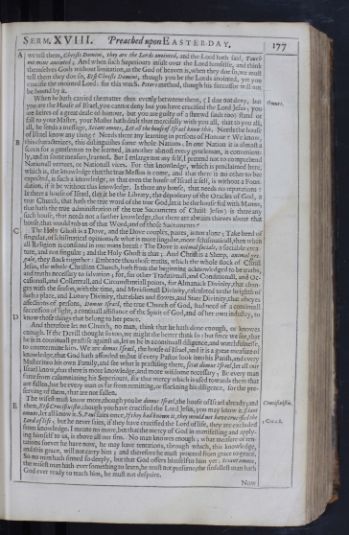 Serm. XVIII.
Preached upon Easter-day.
177
we tell them, Christi Domini, they are the Lords anointed, and the Lord hath said, Touch
Serm. XVIII.
Preached upon Easter-day.
177
we tell them, Christi Domini, they are the Lords anointed, and the Lord hath said, Touch
not mine anointed; And when such Superiours insult over the Lord himselfe, and think
themselves Gods without limitation, as the God of heaven is, when they doe so, we must
tell them they doe so, Et si Christi Domini, though you be the Lords anointed, yet you
crucifie the anointed Lord: for this was S. Peters method, though his successor will not
be bound by it. When he hath carried the matter thus evenly betweene them, (I doe not deny, butOmnes.
you are the House of Israel, you cannot deny but you have crucified the Lord Jesus; you
are heires of a great deale of honour, but you are guilty of a shrewd fault too) stand or
fall to your Master, your Master hath dealt thus mercifully with you all, that to you all,
all, he sends a message, Sciant omnes, Let all the house of Israel know this. Needs the house
of Israel know any thing? Needs there any learning in persons of Honour? We know,
this characterizes, this distinguishes some whole Nations; In one Nation it is almost a
scorn for a gentleman to be learned, in another almost every gentleman, is convenient-
ly, and in some measure, learned. But I enlarge not my self, I pretend not to comprehend
Nationall vertues, or Nationall vices. For this knowledge, which is proclaimed here,
which is, the knowledge that the true Messias is come, and that there is no other to bee
expected, is such a knowledge, as that even the house of Israel it self, is without a Foun-
dation, if it be without this knowledge. Is there any house, that needs no reparations?
Is there a house of Israel, (let it be the Library, the depositary of the Oracles of God, a
true Church, that hath the true word of the true God, let it be the house fed with Manna,
that hath the true administration of the true Sacraments of Christ Jesus) is there any
such house, that needs not a farther knowledge, that there are alwaies thieves about that
house, that would rob us of that Word, and of those Sacraments? The Holy Ghost is a Dove, and the Dove couples, paires, is not alone; Take heed of
singular, of schismatical opinions; & what is more singular, more schismaticall, then when
all Religion is confined in one mans breast? The Dove is animal sociale, a sociable crea-
ture, and not singular; and the Holy Ghost is that; And Christ is a Sheep, animal gre-
gale, they flock together: Embrace thou those truths, which the whole flock of Christ
Jesus, the whole Christian Church, hath from the beginning acknowledged to be truths,
and truths necessary to salvation; for, for other Traditionall, and Conditionall, and Oc-
casionall, and Collaterall, and Circumstantiall points, for Almanack Divinity, that chan-
ges with the season, with the time, and Meridionall Divinity, calculated to the heighth of
such a place, and Lunary Divinity, that ebbes and flowes, and State Divinity, that obeyes
affections of persons, Domus Israel, the true Church of God, had need of a continuall
succession of light, a contiuall assistance of the Spirit of God, and of her own industry, to
know those things that belong to her peace. And therefore let no Church, no man, think that he hath done enough, or knowes
enough. If the Devill thought so too, we might the better think so: but since we see, that
he is in continuall practise against us, let us be in a continuall diligence, and watchfulnesse,
to countermine him. We are domus Israel, the house of Israel, and it is a great measure of
knowledge, that God hath afforded us; but if every Pastor look into his Parish, and every
Master into his own Family, and see what is practising there, sciat domus Israel, let all our
Israel know, that there is more knowledge, and more wisdome necessary; Be every man
farre from calumniating his Superiours, for that mercy which is used towards them that
are fallen, but be every man as far from remitting, or slackning his diligence, for the pre-
serving of them, that are not fallen. The wisest must know more, though you be domus Israel, the house of Israel already; andCrucifixistis.
then, Et si Crucifixistis, though you have crucified the Lord Jesus, you may know it, sciant
omnes, let all know it. S. Paul saies once, If they had known it, they would not have crucified the
Lord of life; but he never saies, if they have crucified the Lord of life, they are excluded1 Cor. 2.8.
from knowledge. I meane no more, but that the mercy of God in manifesting and apply-
ing himself to us, is above all our sins. No man knowes enough; what measure of ten-
tations soever he have now, he may have tentations, through which, this knowledge,
and this grace, will not carry him; and therefore he must proceed from grace to grace.
So no man hath sinned so deeply, but that God offers himself to him yet; Sciant omnes,
the wisest man hath ever something to learn, he must not presume; the sinfullest man hath
God ever ready to teach him, he must not despaire. Now
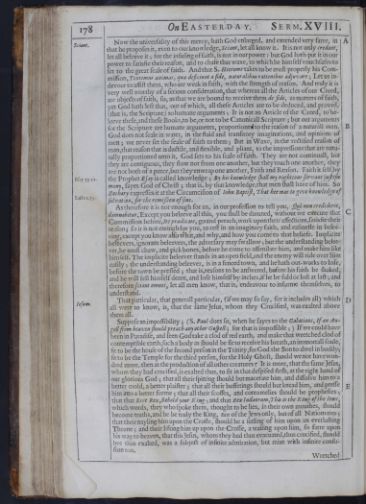 178
On Easter-day.
Serm. XVIII.
Now the universality of this mercy, hath God enlarged, and extended very farre, inSciant.
178
On Easter-day.
Serm. XVIII.
Now the universality of this mercy, hath God enlarged, and extended very farre, inSciant.
that he proposes it, even to our knowledge, Sciant, let all know it. It is not only credant,
let all beleeve it; for the infusing of faith, is not in our power: but God hath put it in our
power to satisfie their reason, and to chafe that waxe, to which he himself vouchsafes to
set to the great seale of faith. And that S. Hierome takes to be most properly his Com-
mission, Tentemus animas, quæ deficiunt a fide, naturalibus rationibus adjuvare; Let us in-
devour to assist them, who are weak in faith, with the strength of reason. And truly it is
very well worthy of a serious consideration, that whereas all the Articles of our Creed,
are objects of faith, so, as that we are bound to receive them de fide, as matters of faith,
yet God hath left that, out of which, all these Articles are to be deduced, and proved,
(that is, the Scripture) to humane arguments; It is not an Article of the Creed, to be-
leeve these, and these Books, to be, or not to be Canonicall Scripture; but our arguments
for the Scripture are humane arguments, proportioned to the reason of a naturall man.
God does not seale in water, in the fluid and transitory imaginations, and opinions of
men; we never set the seale of faith to them; But in Waxe, in the rectified reason of
man, that reason that is ductile, and flexible, and pliant, to the impressions that are natu-
rally proportioned unto it, God sets to his seale of faith. They are not continuall, but
they are contiguous, they flow not from one another, but they touch one another, they
are not both of a peece, but they enwrap one another, Faith and Reason. Faith it self, by
the Prophet Esay is called knowledge; By his knowledge shall my righteous servant justifieEsay 53.11.
many, sayes God of Christ; that is, by that knowledge, that men shall have of him. So
Zechary expresses it at the Circumcision of Iohn Baptist, That hee was to give knowledge of
salvation, for the remission of sins.Luke 1.77. As therefore it is not enough for us, in our profession to tell you, Qui non crediderit,
damnabitur, Except you beleeve all this, you shall be damned, without we execute that
Commission before, Ite prædicate, go and preach, work upon their affections, satisfie their
reason; so it is not enough for you, to rest in an imaginary faith, and easinesse in belee-
ving, except you know also what, and why, and how you come to that beliefe. Implicite
beleevers, ignorant beleevers, the adversary may swallow; but the understanding belee-
ver, he must chaw, and pick bones, before he come to assimilate him, and make him like
himself. The implicite beleever stands in an open field, and the enemy will ride over him
easily; the understanding beleever, is in a fenced town, and he hath out-works to lose,
before the town be pressed; that is, reasons to be answered, before his faith be shaked,
and he will sell himself deare, and lose himself by inches, if he be sold or lost at last; and
therefore sciant omnes, let all men know, that is, endeavour to informe themselves, to
understand. That particular, that generall particular, (if we may so say, for it includes all) whichIesum.
all were to know, is, that the same Jesus, whom they Crucified, was exalted above
them all. Suppose an impossibility; (S. Paul does so, when he sayes to the Galatians, If an An-
gell from heaven should preach any other Gospell; for that is impossible;) If we could have
been in Paradise, and seen God take a clod of red earth, and make that wretched clod of
contemptible earth, such a body as should be fit to receive his breath, an immortall soule,
fit to be the house of the second person in the Trinity, for God the Son to dwel in bodily;
fit to be the Temple for the third person, for the Holy Ghost, should we not have won-
dred more, then at the production of all other creatures? It is more, that the same Jesus,
whom they had crucified, is exalted thus, to sit in that despised flesh, at the right hand of
our glorious God; that all their spitting should but macerate him, and dissolve him to a
better mold, a better plaister; that all their buffetings should but knead him, and presse
him into a better forme; that all their scoffes, and contumelies should be prophesies;
that that Ecce Rex, Behold your King; and that Rex Iudæorum, This is the King of the Iews,
which words, they who spoke them, thought to be lies, in their own mouthes, should
become truths, and he be truly the King, not of the Jews only, but of all Nations too;
that their nayling him upon the Crosse, should be a setling of him upon an everlasting
Throne; and their lifting him up upon the Crosse, a waiting upon him, so farre upon
his way to heaven, that this Jesus, whom they had thus evacuated, thus crucified, should
bee thus exalted, was a subject of infinite admiration, but mixt with infinite confu-
sion too. Wretched
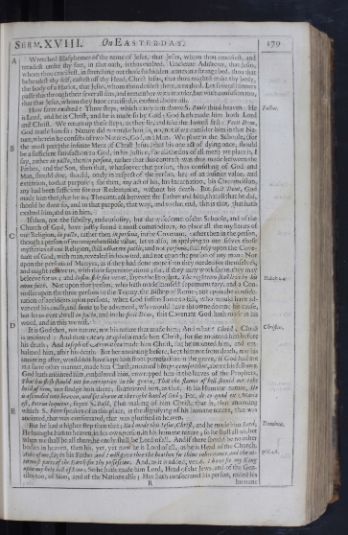 Serm. XVIII.
On Easter-day.
179
Wretched Blasphemer of the name of Jesus, that Jesus, whom thou crucifiest, and
Serm. XVIII.
On Easter-day.
179
Wretched Blasphemer of the name of Jesus, that Jesus, whom thou crucifiest, and
treadest under thy feet, in that oath, is thus exalted. Uncleane Adulterer, that Jesus,
whom thou crucifiest, in stretching out those forbidden armes in a strange bed, thou that
beheadest thy self, castest off thy Head; Christ Jesus, that thou mightst make thy body,
the body of a Harlot, that Jesus, whom thou defilest there, is exalted. Let severall sinners
passe this through their severall sins, and remember with wonder, but with confusion too,
that that Jesus, whom they haue crucified, is exalted above all. How farre exalted? Three steps, which carry him above S. Pauls third heaven: HeFactus.
is Lord, and he is Christ, and he is made so by God; God hath made him both Lord
and Christ. We return up these steps, as they lie, and take the lowest first: Fecit Deus,
God made him so: Nature did not make him so, no, not if we consider him in that Na-
ture, wherein he consists of two Natures, God, and Man. We place in the Schoole, (for
the most part) the infinite Merit of Christ Jesus (that his one act of dying once, should
be a sufficient satisfaction to God, in his Justice, for all the sins of all men) we place it, I
say, rather in pacto, then in persona, rather that this contract was thus made between the
Father, and the Son, then that, whatsoever that person, thus consisting of God and
Man, should doe, should, onely in respect of the person, bee of an infinite value, and
extention, to that purpose; for then, any act of his, his Incarnation, his Circumcision,
any had been sufficient for our Redemption, without his death. But fecit Deus, God
made him that, that he is; The contract between the Father and him, that all that he did,
should be done so, and to that purpose, that way, and to that end, this is that, that hath
exalted him, and us in him. If then, not the subtilty, and curiosity, but the wisedome of the Schoole, and of the
Church of God, have justly found it most commodious, to place all the mysteries of
our Religion, in pacto, rather then in persona, in the Covenant, rather then in the person,
though a person of incomprehensible value, let us also, in applying to our selves those
mysteries of our Religion, still adhærere pactis, and not personis, still rely upon the Cove-
nant of God, with man, revealed in his word, and not upon the person of any man: Not
upon the persons of Martyrs, as if they had done more then they needed for themselves,
and might relieve us, with their supererogations; for, if they may work for us, they may
beleeve for us; and Iustus fide sua vivet, sayes the Prophet, The righteous shall live by hisHabak. 2.4.
owne faith. Not upon that person, who hath made himself supernumerary, and a Con-
troller upon the three persons in the Trinity, the Bishop of Rome; not upon the conside-
ration of accidents upon persons, when God suffers some to fall, who would have ad-
vanced his cause, and some to be advanced, who would have throwne downe his cause,
but let us ever dwell in pacto, and in the fecit Deus, this Covenant God hath made in his
word, and in this we rest. It is God then, not nature, not his nature that made him; And what? Christ; ChristChristus.
is anointed: And then Mary Magdalen made him Christ, for she anointed him before
his death; And Ioseph of Arimathea made him Christ, for he anointed him, and em-
balmed him, after his death. But her anointing before, kept him not from death, nor his
anointing after, would not have kept him from putrefaction in the grave, if God had not
in a farre other manner, made him Christ, anointed him præconsortibus, above his fellows.
God hath anointed him, embalmed him, enwrapped him in the leaves of the Prophets,
That his flesh should not see corruption in the grave, That the flames of hell should not take
hold of him, nor sindge him there; so anointed him, as that, in his Humane nature, He
is ascended into heaven, and set downe at the right hand of God; For, de eo quod ex Maria
est, Petrus loquitur, sayes S. Basil, That making of him Christ, that is, that anointing
which S. Peter speakes of in this place, is the dignifying of his humane nature, that was
anointed, that was consecrated, that was glorified in heaven. But he had a higher step then that; God made this Iesus, Christ, and he made him Lord;Dominus.
He brought him to heaven, in his own person, in his humane nature; so he shall all us; but
when we shall be all there, he onely shall be Lord of all. And if there should be no other
bodies in heaven, then his, yet, yet now he is Lord of all, as he is Head of the Church.
Aske of me, sayes his Father, and I will give thee the heathen for thine inheritance, and the Psal. 2.8. ut-
termost parts of the Earth for thy possession. And, as it is added, ver. 6. I have set my King
upon my holy hill of Sion; So he hath made him Lord, Head of the Jews, and of the Gen-
tiles too, of Sion, and of the Nations also; Hee hath consecrated his person, raised his R humane
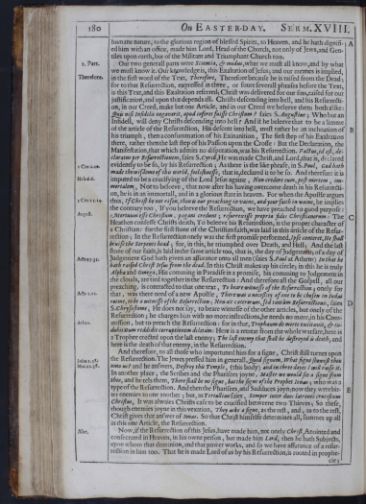 180
On Easter-day.
Serm. XVIII.
humane nature, to the glorious region of blessed Spirits, to Heaven, and he hath dignifi-
180
On Easter-day.
Serm. XVIII.
humane nature, to the glorious region of blessed Spirits, to Heaven, and he hath dignifi-ed him with an office, made him Lord, Head of the Church, not only of Jews, and Gen-
tiles upon earth, but of the Militant and Triumphant Church too.
2. Part. Our two generall parts were Scientia, & modus, what we must all know, and by what
we must know it. Our knowledge is, this Exaltation of Jesus; and our meanes is implied,
Therefore. in the first word of the Text, Therefore, Therefore because he is raised from the Dead;
for to that Resurrection, expressed in three, or foure severall phrases before the Text,
is this Text, and this Exaltation referred; Christ was delivered for our sins, raised for our
justification, and upon that depends all. Christs descending into hell, and his Resurrecti-
on, in our Creed, make but one Article, and in our Creed we beleeve them both alike:
Quis nisi Infidelis negaverit, apud inferos fuisse Christum? saies S. Augustine; Who but an
Infidell, will deny Christs descending into hell? And if he beleeve that to be a limme
of the article of the Resurrection, His descent into hell, must rather be an inchoation of
his triumph, then a consummation of his Exinanition, The first step of his Exaltation
there, rather then the last step of his Passion upon the Crosse: But the Declaration, the
Manifestation, that which admits no disputation, was his Resurrection. Factus, id est, de-
claratus per Resurrectionem, saies S. Cyrill, He was made Christ, and Lord, that is, declared
1 Cor. 1.20. evidently to be so, by his Resurrection; As there is the like phrase, in S. Paul, God hath
made the wisdome of this world, foolishnesse, that is, declared it to be so. And therefore it is
Heb. 6.6. imputed to be a crucifying of the Lord Jesus againe, Non credere eum, post mortem, im-
mortalem, Not to beleeve, that now after his having overcome death in his Resurrecti-
on, he is in an immortall, and in a glorious state in heaven. For when the Apostle argues
1 Cor. 15.14. thus, If Christ be not risen, then is our preaching in vaine, and your faith in vaine, he implies
the contrary too, If you beleeve the Resurrection, we have preached to good purpose:
August. Mortuum esse Christum, pagani credunt; resurrexisse propria fides Christianorum: The
Heathen confesse Christs death; To beleeve his Resurrection, is the proper character of
a Christian: for the first stone of the Christian faith, was laid in this article of the Resur-
rection; In the Resurrection onely was the first promise performed, Ipse conteret, He shall
bruise the Serpents head; for, in this, he triumphed over Death, and Hell; And the last
stone of our faith, is laid in the same article too, that is, the day of Judgement; of a day of
Acts 17.31. Judgement God hath given an assurance unto all men (saies S. Paul at Athens) In that he
hath raised Christ Iesus from the dead. In this Christ makes up his circle; in this he is truly
Alpha and Omega, His comming in Paradise in a promise, his comming to Judgement in
the clouds, are tied together in the Resurrection: And therefore all the Gospell, all our
preaching, is contracted to that one text, To beare witnesse of the Resurrection; onely for
Acts 1.22. that, was there need of a new Apostle, There was a necessity of one to be chosen in Iudas
roome, to be a witnesse of the Resurrection; Non ait cæterorum, sed tantùm Resurrectionis, saies
S. Chrysostome, He does not say, to beare witnesse of the other articles, but onely of the
Resurrection; he charges him with no more instructions, he needs no more, Athan. in his Com-
mission, but to preach the Resurrection: for in that, Trophæum de morte excitavit, & in-
dubitatum reddidit corruptionem deletam: Here is a retreat from the whole warfare, here is
a Trophee erected upon the last enemy; The last enemy that shall be destroyed is death, and
here is the death of that enemy, in the Resurrection. And therefore, to all those who importuned him for a signe, Christ still turnes upon
Iohn 2.18. the Resurrection. The Jewes pressed him in generall, Quod signum, What signe showest thou
Mat. 12.38. unto us? and he answers, Destroy this Temple, (this body) and in three dayes I will raise it.
In another place, the Scribes and the Pharisees joyne, Master we would see a signe from
thee, and he tels them, There shall be no signe, but the signe of the Prophet Ionas; who was a
type of the Resurrection. And then the Pharisees, and Sadduces joyn; now they were bit-
ter enemies to one another; but, as Tertullian saies, Semper inter duos latrones crucifixus
Christus, It was alwaies Christs case to be crucified betweene two Thieves; So these,
though enemies joyne in this vexation, They aske a signe, as the rest, and, as to the rest,
Christ gives that answer of Ionas. So that Christ himselfe determines all, summes up all
in this one Article, the Resurrection. Nos. Now, if the Resurrection of this Jesus, have made him, not onely Christ, Anointed and
consecrated in Heaven, in his owne person, but made him Lord, then he hath Subjects,
upon whom that dominion, and that power works, and so we have assurance of a resur-
rection in him too. That he is made Lord of us by his Resurrection, is rooted in prophe-
cie;
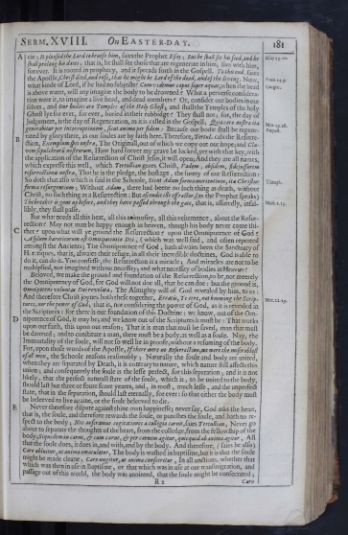 Serm. XVIII.
On Easter-day.
181
cie; Esay 53.10. It pleased the Lord to bruise him, saies the Prophet Esay; But he shall see his seed, and he
Serm. XVIII.
On Easter-day.
181
cie; Esay 53.10. It pleased the Lord to bruise him, saies the Prophet Esay; But he shall see his seed, and he
shall prolong his daies; that is, he shall see those that are regenerate in him, live with him,
forever. It is rooted in prophecy, and it spreads forth in the Gospell. To this end, saies
Rom. 14.9. the Apostle, Christ died, and rose, that he might be Lord of the dead, and of the living. Now,
Gregor. what kinde of Lord, if he had no subjects? Cum videmus caput super aquas, when the head
is above water, will any imagine the body to be drowned? What a perverse considera-
tion were it, to imagine a live head, and dead members? Or, consider our bodies in our
selves, and Our bodies are Temples of the Holy Ghost; and shall the Temples of the holy
Ghost lye for ever, for ever, buried in their rubbidge? They shall not; for, the day of
Mat. 19.28. Judgement, is the day of Regeneration, as it is called in the Gospell; Quia caro nostra ita
August. generabitur per incorruptionem, sicut anima per fidem: Because our bodie shall be regene-
rated by glory there, as our soules are by faith here. Therefore, Tertul. cals the Resurre-
ction, Exemplum spei nostræ, The Originall, out of which we copy out our hope; and Cla-
vem sepulchrorū nostrorum, How hard soever my grave be locked, yet with that key, with
the application of the Resurrection of Christ Jesus, it will open; And they are all names,
which expresse this well, which Tertullian gives Christ, Vadem, obsidem, fidejussorem
resurrectionis nostræ, That he is the pledge, the hostage, the surety of our Resurrection:
Theoph. So doth that also which is said in the Schoole, Sicut Adam forma morientium, it a Christus
forma resurgentium; Without Adam, there had beene no such thing as death, without
Christ, no such thing as a Resurrection: But ascendit ille effractor, (as the Prophet speaks)
Mich. 2.13. The breaker is gone up before, and they have passed through the gate, that is, assuredly, infal-
libly, they shall passe. But what needs all this heat, all this animosity, all this vehemence, about the Resur-
rection? May not man be happy enough in heaven, though his body never come thi-
ther? upon what will ye ground the Resurrection? upon the Omnipotence of God?
Asylum hæreticorum est Omnipotentia Dei, (which was well said, and often repeated
amongst the Ancients) The Omnipotence of God, hath alwaies been the Sanctuary of
Heretiques, that is, alwaies their refuge, in all their incredible doctrines, God is able to
do it, can do it. You confesse, the Resurrection is a miracle; And miracles are not to be
multiplied, nor imagined without necessity; and what necessity of bodies in Heaven? Beloved, we make the ground and foundation of the Resurrection, to be, not meerely
the Omnipotency of God, for God will not doe all, that he can doe: but the ground is,
Omnipotens voluntas Dei revelata, The Almighty will of God revealed by him, to us:
Mat. 22.29. And therefore Christ joynes both these together, Erratis, Ye erre, not knowing the Scrip-
tures, nor the power of God; that is, not considering the power of God, as it is revealed in
the Scriptures: for there is our foundation of this Doctrine: we know, out of the Om-
nipotence of God, it may be; and we know out of the Scriptures it must be: That works
upon our faith, this upon our reason; That it is man that must be saved, man that must
be damned; and to constitute a man, there must be a body, as well as a soule. Nay, the
Immortality of the soule, will not so well lie in proofe, without a resuming of the body.
For, upon those words of the Apostle, If there were no Resurrection, we were the miserablest
of all men, the Schoole reasons reasonably; Naturally the soule and body are united,
when they are separated by Death, it is contrary to nature, which nature still affects this
union; and consequently the soule is the lesse perfect, for this separation; and it is not
likely, that the perfect naturall state of the soule, which is, to be united to the body,
should last but three or foure score yeares, and, in most, much lesse, and the unperfect
state, that in the separation, should last eternally, for ever: so that either the body must
be beleeved to live againe, or the soule beleeved to die. Never therefore dispute against thine own happinesse; never say, God asks the heart,
that is, the soule, and therefore rewards the soule, or punishes the soule, and hath no re-
spect to the body; Nec auferamus cogitationes a collegio carnis, saies Tertullian, Never go
about to separate the thoughts of the heart, from the colledge, from the fellowship of the
body; Siquidem in carne, & cum carne, & per carnem agitur, quicquid ab anima agitur, All
that the soule does, it does in, and with, and by the body. And therefore, (saies he also)
Caro abluitur, ut anima emaculetur, The body is washed in baptisme, but it is that the soule
might be made cleane; Caro ungitur, ut anima consecretur, In all unctions, whether that
which was then in use in Baptisme, or that which was in use at our transmigration, and
passage out of this world, the body was anointed, that the soule might be consecrated; R2 Caro
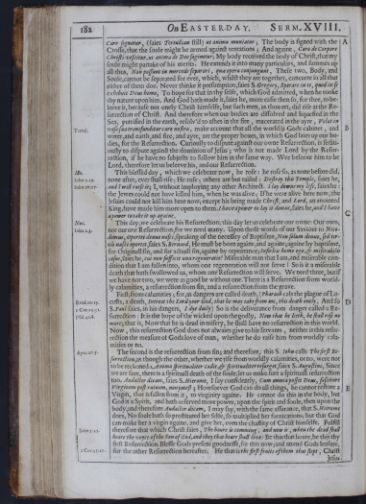 182
On Easter-day.
Serm. XVIII.
Caro signatur, (saies Tertullian still) ut anima muniatur; The body is signed with the
182
On Easter-day.
Serm. XVIII.
Caro signatur, (saies Tertullian still) ut anima muniatur; The body is signed with the
Crosse, that the soule might be armed against tentations; And againe, Caro de Corpore
Christi vescitur, ut anima de Deo saginetur; My body received the body of Christ, that my
soule might partake of his merits. He extends it into many particulars, and summes up
all thus, Non possunt in mercede separari, quæ opera conjungunt, These two, Body, and
Soule, cannot be separated for ever, which, whilst they are together, concurre in all that
either of them doe. Never thinke it presumption, saies S. Gregory, Sperare in te, quod in se
exhibuit Deus homo, To hope for that in thy selfe, which God admitted, when he tooke
thy nature upon him. And God hath made it, saies he, more easie then so, for thee, to be-
leeve it, because not onely Christ himselfe, but such men, as thou art, did rise at the Re-
surrection of Christ. And therefore when our bodies are dissolved and liquefied in the
Sea, putrified in the earth, resolv'd to ashes in the fire, macerated in the ayre, Velut in
Tertul. vasa sua transfunditur caro nostra, make account that all the world is Gods cabinet, and
water, and earth, and fire, and ayre, are the proper boxes, in which God laies up our bo-
dies, for the Resurrection. Curiously to dispute against our owne Resurrection, is sediti-
ously to dispute against the dominion of Jesus; who is not made Lord by the Resur-
rection, if he have no subjects to follow him in the same way. Wee beleeve him to be
Lord, therefore let us beleeve his, and our Resurrection.
Ille. This blessed day, which we celebrate now, he rose: he rose so, as none before did,
Iohn 2.19. none after, ever shall rise; He rose; others are but raised: Destroy this Temple, saies he,
Iohn 10.17. and I will raise it; I, without imploying any other Architect. I lay downe my life, saies he:
the Jewes could not have killed him, when he was alive; If he were alive here now, the
Jesuits could not kill him here now; except his being made Christ, and Lord, an anointed
King, have made him more open to them. I have a power to lay it downe, saies he, and I have
a power to take it up againe. Nos. This day, we celebrate his Resurrection; this day let us celebrate our owne: Our own,
Iohn 2.3. not our one Resurrection, for we need many. Upon those words of our Saviour to Nico-
demus, Oportet denuo nasci, speaking of the necessity of Baptisme, Non solum denuo, sed ter-
tiò nasci oportet, saies S. Bernard, He must be born againe, and againe; againe by baptisme,
for Originall sin, and for actuall sin, againe by repentance; Infœlix homo ego, & miser abilis
casus, saies he, cui non sufficit una regeneratio! Miserable man that I am, and miserable con-
dition that I am fallen into, whom one regeneration will not serve! So is it a miserable
death that hath swallowed us, whom one Resurrection will serve. We need three, but if
we have not two, we were as good be without one. There is a Resurrection from world-
ly calamities, a resurrection from sin, and a resurrection from the grave. First, from calamities; for, as dangers are called death, (Pharaoh cals the plague of Exod. 10.17. Lo-
custs, a death, Intreat the Lord your God, that he may take from me, this death onely, And so
1 Cor. 15.31. S. Paul saies, in his dangers, I dye daily) So is the deliverance from danger called a Psal. 41.8. Re-
surrection: It is the hope of the wicked upon the godly, Now that he lieth, he shall rise no
more; that is, Now that he is dead in misery, he shall have no resurrection in this world.
Now, this resurrection God does not alwaies give to his servants, neither is this resur-
rection the measure of Gods love of man, whether he do raise him from worldly cala-
mities or no. Apoc. 20.5. The second is the resurrection from sin; and therefore, this S. Iohn calls The first Re-
surrection, as though the other, whether we rise from worldly calamities, or no, were not
to be reckoned. Anima spiritualiter cadit, & spiritualiter resurget, saies S. Augustine, Since
we are sure, there is a spirituall death of the soule, let us make sure a spirituall resurrection
too. Audacter dicam, saies S. Hierome, I say confidently, Cum omnia posset Deus, suscitare
Virginem post ruinam, non potest; Howsoever God can do all things, he cannot restore a
Virgin, that is fallen from it, to virginity againe. He cannot do this in the body, but
God is a Spirit, and hath reserved more power, upon the spirit and soule, then upon the
body, and therefore Audacter dicam, I may say, with the same assurance, that S. Hierome
does, No soule hath so prostituted her selfe, so multiplied her fornications; but that God
can make her a virgin againe, and give her, even the chastity of Christ himselfe. Fulfill
Iohn 5.25. therefore that which Christ saies, The houre is comming, and now is, when the dead shall
heare the voyce of the Son of God, and they that heare shall live: Be this that houre, be this thy
first Resurrection. Blesse Gods present goodnesse, for this now; and attend Gods leasure,
1 Cor. 15.20. for the other Resurrection hereafter. He that is the first fruits of them that slept, Christ Jesus
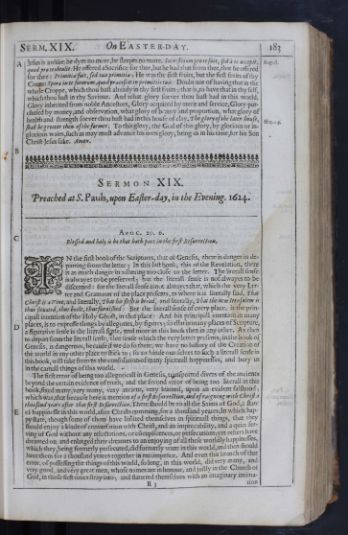 Serm. XIX.
On Easter-day.
183
Jesus is awake; he dyes no more, he sleepes no more. Sacrificium pro te fuit, sed à te accepit, August.
Serm. XIX.
On Easter-day.
183
Jesus is awake; he dyes no more, he sleepes no more. Sacrificium pro te fuit, sed à te accepit, August.
quod pro te obtulit: He offered a Sacrifice for thee, but he had that from thee, that he offered
for thee: Primitiæ fuit, sed tuæ primitiæ; He was the first fruits, but the first fruits of thy
Corne: Spera in te futurum, quod præcessit in primitiis tuis: Doubt not of having that in the
whole Croppe, which thou hast already in thy first fruits; that is, to have that in thy self,
which thou hast in thy Saviour. And what glory soever thou hast had in this world,
Glory inherited from noble Ancestors, Glory acquired by merit and service, Glory pur-
chased by money, and observation, what glory of beauty and proportion, what glory of
health and strength soever thou hast had in this house of clay, The glory of the later house,
Hag. 2.9. shall be greater then of the former. To this glory, the God of this glory, by glorious or in-
glorious waies, such as may most advance his own glory, bring us in his time, for his Son
Christ Jesus sake. Amen.
Sermon XIX.
Preached at S. Pauls, upon Easter-day, in the Evening. 1624.
Apoc. 20.6.
Blessed and holy is he that hath part in the first Resurrection.
INIn the first book of the Scriptures, that of Genesis, there is danger in de-
parting from the letter; In this last book, this of the Revelation, there
is as much danger in adhering too close to the letter. The literall sense
is alwayes to be preserved; but the literall sense is not alwayes to be
discerned: for the literall sense is not alwayes that, which the very Let-
ter and Grammer of the place presents, as where it is literally said, That
Christ is a Vine, and literally, That his flesh is bread, and literally, That the new Ierusalem is
thus situated, thus built, thus furnished: But the literall sense of every place, is the prin-
cipall intention of the Holy Ghost, in that place: And his principall intention in many
places, is to expresse things by allegories, by figures; so that in many places of Scripture,
a figurative sense is the literall sense, and more in this book then in any other. As then
to depart from the literall sense, that sense which the very letter presents, in the book of
Genesis, is dangerous, because if we do so there, we have no history of the Creation of
the world in any other place to stick to; so to binde our selves to such a literall sense in
this book, will take from us the consolation of many spirituall happinesses, and bury us
in the carnall things of this world.
The first error of being too allegoricall in Genesis, transported divers of the ancients
beyond the certain evidence of truth, and the second error of being too literall in this
book, fixed many, very many, very ancient, very learned, upon an evident falshood;
which was, that because here is mention of a first Resurrection, and of raigning with Christ a
thousand years after that first Resurrection, There should be to all the Saints of God, a state
of happinesse in this world, after Christs comming, for a thousand yeares; In which hap-
py state, though some of them have limited themselves in spirituall things, that they
should enjoy a kinde of conversation with Christ, and an impeccability, and a quiet ser-
ving of God without any reluctations, or cōcupiscencesconcupiscences, or persecutions; yet others have
dreamed on, and enlarged their dreames to an enjoying of all these worldly happinesses,
which they, being formerly persecuted, did formerly want in this world, and then should
have them for a thousand yeares together in recompence. And even this branch of that
error, of possessing the things of this world, so long, in this world, did very many, and
very good, and very great men, whose names are in honour, and justly in the Church of
God, in those first times stray into; and flattered themselves with an imaginary intima-
R3 tion
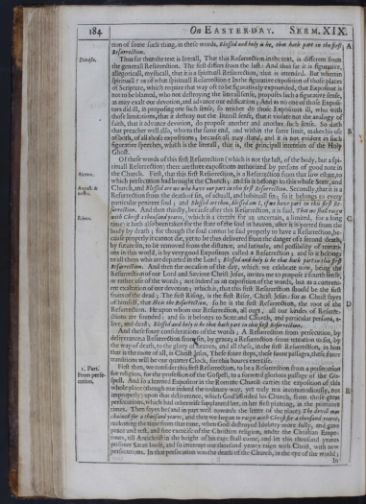 184
On Easter-day.
Serm. XIX.
tion of some such thing, in these words, Blessed and holy is he, that hath part in the first
184
On Easter-day.
Serm. XIX.
tion of some such thing, in these words, Blessed and holy is he, that hath part in the first
Resurrection. Thus far then the text is literall, Divisio. That this Resurrection in the text, is different from
the generall Resurrection. The first differs from the last: And thus far it is figurative,
allegoricall, mysticall, that it is a spirituall Resurrection, that is intended. But wherein
spirituall? or of what spirituall Resurrection? In the figurative exposition of those places
of Scripture, which require that way oft to be figuratively expounded, that Expositor is
not to be blamed, who not destroying the literall sense, proposes such a figurative sense,
as may exalt our devotion, and advance our edification; And as no one of those Exposi-
tors did ill, in proposing one such sense, so neither do those Expositors ill, who with
those limitations, that it destroy not the literall sense, that it violate not the analogy of
faith, that it advance devotion, do propose another and another such sense. So doth
that preacher well also, who to the same end, and within the same limit, makes his use
of both, of all those expositions; because all may stand, and it is not evident in such
figurative speeches, which is the literall, that is, the principall intention of the Holy
Ghost. Of these words of this first Resurrection (which is not the last, of the body, but a spi-
rituall Resurrection) there are three expositions authorized by persons of good note in
the Church.Alcazar. First, that this first Resurrection, is a Resurrection from that low estate, to
which persecution had brought the Church; and so it belongs to this whole State, and
Church, August. &
nostri. and Blessed are we who have our part in this first Resurrection. Secondly, that it is a
Resurrection from the death of sin, of actuall, and habituall sin; so it belongs to every
particular penitent soul; and Blessed art thou, blessed am I, if we have part in this first Re-
surrection. And then thirdly, because after this Resurrection, it is said, That we shall raign
with Christ a thousand yeares, Ribera. (which is a certain for an uncertain, a limited, for a long
time) it hath also been taken for the state of the soul in heaven, after it is parted from the
body by death; for though the soul cannot be said properly to have a Resurrection, be-
cause properly it cannot die, yet to be thus delivered from the danger of a second death,
by future sin, to be removed from the distance, and latitude, and possibility of tentati-
ons in this world, is by very good Expositors called a Resurrection; and so it belongs
to all them who are departed in the Lord; Blessed and holy is he that hath part in this first
Resurrection. And then the occasion of the day, which we celebrate now, being the
Resurrection of our Lord and Saviour Christ Jesus, invites me to propose a fourth sense,
or rather use of the words; not indeed as an exposition of the words, but as a conveni-
ent exaltation of our devotion; which is, that this first Resurrection should be the first
fruits of the dead; The first Rising, is the first Riser, Christ Jesus: for as Christ sayes
of himself, that He is the Resurrection, so he is the first Resurrection, the root of the
Resurrection. He upon whom our Resurrection, all ours, all our kindes of Resurre-
ctions are founded; and so it belongs to State and Church, and particular persons, a-
live, and dead; Blessed and holy is he that hath part in this first Resurrection. And these foure considerations of the words; A Resurrection from persecution, by
deliverance; a Resurrection from sin, by grace; a Resurrection from tentation to sin, by
the way of death, to the glory of heaven; and all these, in the first Resurrection, in him
that is the roote of all, in Christ Jesus, These foure steps, these foure passages, these foure
transitions will be our quarter Clock, for this houres exercise. First then, 1. Part.
From perse-
cution. we consider this first Resurrection, to be a Resurrection from a persecution
for religion, for the profession of the Gospell, to a forward glorious passage of the Go-
spell. And so a learned Expositor in the Romane Church carries the exposition of this
whole place (though not indeed the ordinary way, yet truly not incommodiously, not
improperly) upon that deliverance, which God afforded his Church, from those great
persecutions, which had otherwise supplanted her, in her first planting, in the primitive
times. Then sayes he (and in part well towards the letter of the place) The devill was
chained for a thousand yeares, and then we began to raign with Christ for a thousand yeares;
reckoning the time from that time, when God destroyed Idolatry more fully, and gave
peace and rest, and free exercise of the Christian religion, under the Christian Empe-
rours, till Antichrist in the height of his rage shall come, and let this thousand yeares
prisoner Satan loose, and so interrupt our thousand yeares raign with Christ, with new
persecutions. In that persecution was the death of the Church, in the eye of the world; In
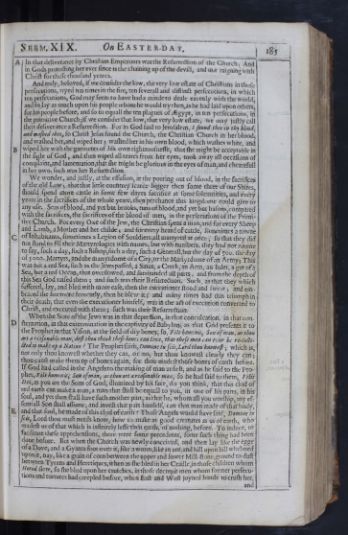 Serm. XIX.
On Easter-day.
185
In that deliverance by Christian Emperours was the Resurrection of the Church; And
Serm. XIX.
On Easter-day.
185
In that deliverance by Christian Emperours was the Resurrection of the Church; And
in Gods protecting her ever since is the chaining up of the devill, and our raigning with
Christ for those thousand yeares. And truly, beloved, if we consider the low, the very low estate of Christians in those
persecutions, tryed ten times in the fire, ten severall and distinct persecutions, in which
ten persecutions, God may seem to have had a minde to deale eavenly with the world,
and to lay as much upon his people whom he would try then, as he had laid upon others,
for his people before, and so to equall the ten plagues of Ægypt, in ten persecutions, in
the primitive Church; if we consider that low, that very low estate, we may justly call
their deliverance a Resurrection. For as God said to Jerusalem, I found thee in thy blood,
and washed thee, so Christ Jesus found the Church, the Christian Church in her blood,
and washed her, and wiped her; washed her in his own blood, which washes white, and
wiped her with the garments of his own righteousnesse, that she might be acceptable in
the sight of God, and then wiped all teares from her eyes, took away all occasions of
complaint, and lamentation, that she might be glorious in the eyes of man, and chearefull
in her own; such was her Resurrection. We wonder, and justly, at the effusion, at the pouring out of blood, in the sacrifices
of the old Law; that that little countrey scarce bigger then some three of our Shires,
should spend more cattle in some few dayes sacrifice at some solemnities, and every
yeare in the sacrifices of the whole yeare, then perchance this kingdome could give to
any use. Seas of blood, and yet but brooks, tuns of blood, and yet but basons, compared
with the sacrifices, the sacrifices of the blood of men, in the persecutions of the Primi-
tive Church. For every Oxe of the Jew, the Christian spent a man, and for every Sheep
and Lamb, a Mother and her childe; and for every heard of cattle, sometimes a towne
of Inhabitants, sometimes a Legion of Souldiers, all martyred at once; so that they did
not stand to fill their Martyrologies with names, but with numbers, they had not roome
to say, such a day, such a Bishop, such a day, such a Generall, but the day of 500. the day
of 5000. Martyrs, and the martyrdome of a City, or the Martyrdome of an Army; This
was not a red Sea, such as the Jews passed, a Sinus, a Creek, an Arm, an Inlet, a gut of a
Sea, but a red Ocean, that overflowed, and surrounded all parts; and from the depth of
this Sea God raised them; and such was their Resurrection. Such, as that they which
suffered, lay, and bled with more ease, then the executioner stood and sweat; and em-
braced the fire more fervently, then he blew it; and many times had this triumph in
their death, that even the executioner himself, was in the act of execution converted to
Christ, and executed with them; such was their Resurrection. When the State of the Jews was in that depression, in that conculcation, in that con-
sternation, in that extermination in the captivity of Babylon, as that God presents it to
the Prophet in that Vision, in the field of dry bones, so, Fili hominis, Son of man, as thou
art a reasonable man, dost thou think these bones can live, that these men can ever be re-colle-
cted to make up a Nation? The Prophet saith, Domine tu scis, Lord thou knowest; which is,
not only thou knowest whether they can, or no, but thou knowest clearly they can;
thou canst make them up of bones again, for thou madest those bones of earth before.
If God had called in the Angels to the making of man at first, and as he said to the Pro-
phet, Fili hominis, Son of man, as thou art a reasonable man, so he had said to them, Filii
Dei, as you are the Sons of God, illumined by his face, do you think, that this clod of
red earth can make a man, a man that shall be equall to you, in one of his parts, in his
soul, and yet then shall have such another part, as that he, whom all you worship, my es-
sentiall Son shall assume, and invest that part himself, can that man made of that body,
and that soul, be made of this clod of earth? Those Angels would have said, Domine tu
scis, Lord thou must needs know, how to make as good creatures as us of earth, who
madest us of that which is infinitely lesse then earth, of nothing, before. To induce, to
facilitate these apprehensions, there were some precedents, some such thing had been
done before. But when the Church was newly conceived, and then lay like the egge
of a Dove, and a Gyants foot over it, like a worm, like an ant, and hill upon hill whelmed
upon it, nay, like a grain of corn between the upper and lower Mill-stone, ground to dust
between Tyrans and Heretiques, when as she bled in her Cradle, in those children whom
Herod slew, so she bled upon her crutches, in those decrepit men whom former persecu-
tions and tortures had creepled before, when East and West joyned hands to crush her, and
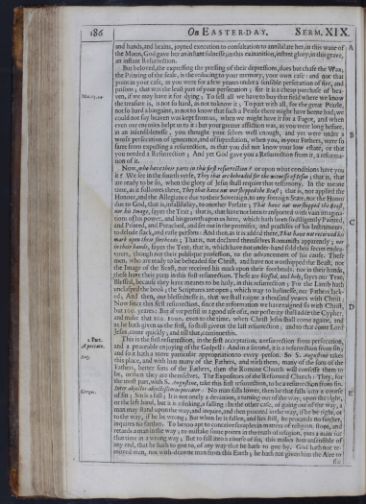 186
On Easter-day.
Serm. XIX.
and hands, and brains, joyned execution to consultation to annihilate her; in this wane of
186
On Easter-day.
Serm. XIX.
and hands, and brains, joyned execution to consultation to annihilate her; in this wane of
the Moon, God gave her an instant fulnesse; in this exinanition, instant glory; in this grave,
an instant Resurrection. But beloved, the expressing the pressing of their depressions, does but chafe the Wax;
the Printing of the seale, is the reducing to your memory, your own case: and not that
point in your case, as you were for a few yeares under a sensible persecution of fire, and
prisons; that was the least part of your persecution; for it is a cheap purchase of hea-
ven, if we may have it for dying;Mat. 13.44. To sell all we have to buy that field where we know
the treasure is, is not so hard, as not to know it; To part with all, for the great Pearle,
not so hard a bargaine, as not to know that such a Pearle there might have beene had; we
could not say heaven was kept from us, when we might have it for a Fagot, and when
even our enemies helpt us to it: but your greater affliction was, as you were long before,
in an insensiblenesse, you thought your selves well enough, and yet were under a
worse persecution of ignorance, and of superstition, when you, in your Fathers, were so
farre from expecting a resurrection, as that you did not know your low estate, or that
you needed a Resurrection; And yet God gave you a Resurrection from it, a reforma-
tion of it. Now, who have their parts in this first resurrection? or upon what conditions have you
it? We see in the fourth verse, They that are beheaded for the witnesse of Iesus; that is, that
are ready to be so, when the glory of Jesus shall require that testimony. In the meane
time, as it followes there, They that have not worshipped the Beast; that is, not applied the
Honour, and the Allegiance due to their Soveraign, to any forraign State; nor the Honor
due to God, that is, infallibility, to another Prelate; That have not worshipped the Beast,
nor his Image, sayes the Text; that is, that have not been transported with vain imagina-
tions of his power, and his growth upon us here, which hath been so diligently Painted,
and Printed, and Preached, and set out in the promises, and practises of his Instruments,
to delude slack, and easie persons: And then, as it is added there, That have not received his
mark upon their foreheads; That is, not declared themselves Romanists apparently; nor
in their hands, sayes the Text; that is, which have not under-hand sold their secret endea-
vours, though not their publique profession, to the advancement of his cause. These
men, who are ready to be beheaded for Christ, and have not worshipped the Beast, nor
the Image of the Beast, nor received his mark upon their foreheads, nor in their hands,
these have their parts in this first resurrection. These are blessed, and holy, sayes our Text;
Blessed, because they have meanes to be holy, in this resurrection; For the Lamb hath
unclasped the book; the Scriptures are open; which way to holinesse, our Fathers lack-
ed; And then, our blessednesse is, that we shall raigne a thousand yeares with Christ;
Now since this first resurrection, since the reformation we have raigned so with Christ,
but 100. yeares: But if we persist in a good use of it, our posterity shall adde the Cypher,
and make that 100. 1000. even to the time, when Christ Jesus shall come againe, and
as he hath given us the first, so shall give us the last resurrection; and to that come Lord
Jesus, come quickly; and till that, continue this. This is the first resurrection, 2 Part.
A peccato. in the first acceptation, a resurrection from persecution,
and a peaceable enjoying of the Gospell: And in a second, it is a resurrection from sin;
and so it hath a more particular appropriation to every person.Aug. So S. Augustine takes
this place, and with him many of the Fathers, and with them, many of the sons of the
Fathers, better sons of the Fathers, then the Romane Church will confesse them to
be, or then they are themselves, The Expositors of the Reformed Church: They, for
the most part, with S. Augustine, take this first resurrection, to be a resurrection from sin.
Inter abjectos abjectissimus peccator:Gregor. No man falls lower, then he that falls into a course
of sin; Sin is a fall; It is not onely a deviation, a turning out of the way, upon the right,
or the left hand, but it is a sinking, a falling: In the other case, of going out of the way, a
man may stand upon the way, and inquire, and then proceed in the way, if he be right, or
to the way, if he be wrong; But when he is fallen, and lies still, he proceeds no farther,
inquires no farther. To be too apt to conceive scruples in matters of religion, stops, and
retards a man in the way; to mistake some points in the truth of religion, puts a man for
that time in a wrong way; But to fall into a course of sin, this makes him unsensible of
any end, that he hath to goe to, of any way that he hath to goe by. God hath not re-
moved man, not with-drawne man from this Earth; he hath not given him the Aire to flie
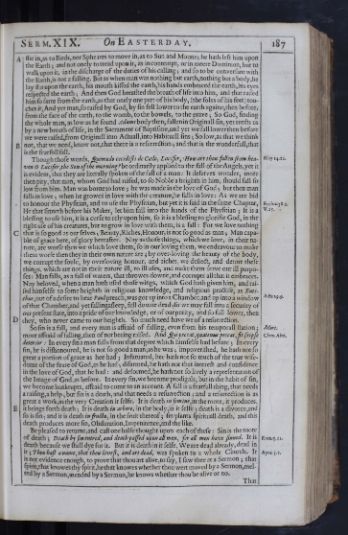 Serm. XIX.
On EasterdayEaster-day.
187
flie in, as to Birds, nor Spheares to move in, as to Sun and Moone; he hath left him upon
Serm. XIX.
On EasterdayEaster-day.
187
flie in, as to Birds, nor Spheares to move in, as to Sun and Moone; he hath left him upon
the Earth; and not onely to tread upon it, as in contempt, or in meere Dominion, but to
walk upon it, in the discharge of the duties of his calling; and so to be conversant with
the Earth, is not a falling. But as when man was nothing but earth, nothing but a body, he
lay flat upon the earth, his mouth kissed the earth, his hands embraced the earth, his eyes
respected the earth; And then God breathed the breath of life into him, and that raised
him so farre from the earth, as that onely one part of his body, (the soles of his feet) tou-
ches it, And yet man, so raised by God, by sin fell lower to the earth againe, then before,
from the face of the earth, to the womb, to the bowels, to the grave; So God, finding
the whole man, as low as he found Adams body then, fallen in Originall sin, yet erects us
by a new breath of life, in the Sacrament of Baptisme, and yet we fall lower then before
we were raised, from Originall into Actuall, into Habituall sins; So low, as that we think
not, that we need, know not, that there is a resurrection; and that is the wonderfull, that
is the fearfull fall. Though those words, Quomodo cecidisti de Cœlo, Lucifer, Esay 14.12. How art thou fallen from hea-
ven O Lucifer, the Son of the morning? be ordinarily applied to the fall of the Angels, yet it
is evident, that they are literally spoken of the fall of a man: It deserves wonder, more
then pity, that man, whom God had raised, to so Noble a heighth in him, should fall so
low from him. Man was borne to love; he was made in the love of God; but then man
falls in love; when he growes in love with the creature, he falls in love: As we are bid
to honour the Physitian, and to use the Physitian, but yet it is said in the same Chapter,
Ecclus. 38.1.
V. 15. He that sinneth before his Maker, let him fall into the hands of the Physitian; It is a
blessing to use him, it is a curse to rely upon him, so it is a blessing to glorifie God, in the
right use of his creatures, but to grow in love with them, is a fall: For we love nothing
that is so good as our selves; Beauty, Riches, Honour, is not so good as man; Man capa-
ble of grace here, of glory hereafter. Nay as those things, which we love, in their na-
ture, are worse then we which love them, so in our loving them, we endeavour to make
them worse then they in their own nature are; by over-loving the beauty of the body,
we corrupt the soule, by overloving honour, and riches, we deflect, and detort these
things, which are not in their nature ill, to ill uses, and make them serve our ill purpo-
ses: Man falls, as a fall of waters, that throwes downe, and corrupts all that it embraces.
Nay beloved, when a man hath used those wings, which God hath given him, and rai-
sed himselfe to some heighth in religious knowledge, and religious practise, Acts 29.9. as Euti-
chus, out of a desire to hear Paul preach, was got up into a Chamber, and up into a window
of that Chamber, and yet falling asleep, fell downe dead; so we may fall into a security of
our present state, into a pride of our knowledge, or of our purity, and so fall lower, then
they, who never came to our heighth. So much need have we of a resurrection. So sin is a fall, and every man is affraid of falling, even from his temporall station;Mors.
more affraid of falling, then of not beeing raised. And Clem. Alex. Qui peccat, quatenus peccat, fit seipso
deterior: In every sin a man falls from that degree which himselfe had before; In every
sin, he is dishonoured, he is not so good a man, as he was; impoverished, he hath not so
great a portion of grace as hee had; Infatuated, hee hath not so much of the true wise-
dome of the feare of God, as he had; disarmed, he hath not that interest and confidence
in the love of God, that he had: and deformed, he hath not so lively a representation of
the Image of God as before. In every sin, we become prodigals, but in the habit of sin,
we become bankrupts, affraid to come to an account. A fall is a fearfull thing, that needs
a raising, a help; but sin is a death, and that needs a resurrection; and a resurrection is as
great a work, as the very Creation it selfe. It is death in semine, in the roote, it produces,
it brings forth death; It is death in arbore, in the body, in it selfe; death is a divorce, and
so is sin; and it is death in fructu, in the fruit thereof; sin plants spirituall death, and this
death produces more sin, Obduration, Impenitence, and the like. Be pleased to returne, and cast one halfe thought upon each of these: Sin is the roote
of death; Death by sin entred, and death passed upon all men, for all men have sinned.Rom. 5.12. It is
death because we shall dye for it. But it is death in it selfe, We are dead already, dead in
it; Thou hast a name, that thou livest, and art dead, was spoken to a whole Church.Apoc. 3.1. It
is not evidence enough, to prove that thou art alive, to say, I saw thee at a Sermon; that
spirit, that knowes thy spirit, he that knowes whether thou wert moved by a Sermon, mel-
ted by a Sermon, mended by a Sermon, he knows whether thou be alive or no. That
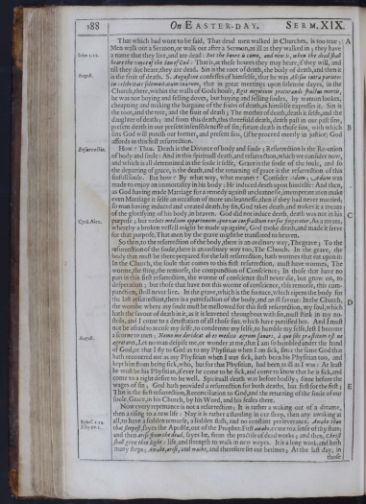 188
On Easter-day.
Serm. XIX.
That which had wont to be said, That dead men walked in Churches, is too true;
188
On Easter-day.
Serm. XIX.
That which had wont to be said, That dead men walked in Churches, is too true;
Men walk out a Sermon, or walk out after a Sermon, as ill as they walked in; they have
a name that they live, Iohn 5.25. and are dead: But the houre is come, and now is, when the dead shall
heare the voyce of the Son of God: That is, at these houres they may heare, if they will, and
till they doe heare, they are dead. Sin is the root of death, the body of death, and then it
is the fruit of death.August. S. Augustine confesses of himselfe, that he was Allisus intra parietes
in celebritate solemnitatum tuarum, that in great meetings upon solemne dayes, in the
Church, there, within the walls of Gods house, Egit negotium procurandi fructus mortis,
he was not buying and selling doves, but buying and selling soules, by wanton lookes,
cheapning and making the bargaine of the fruits of death, as himselfe expresses it. Sin is
the root, and the tree, and the fruit of death; The mother of death, death it selfe, and the
daughter of death; and from this death, this threefold death, death past in our past sins,
present death in our present insensiblenesse of sin, future death in those sins, with which
sins God will punish our former, and present sins, (if he proceed meerly in justice) God
affords us this first resurrection. How?Resurrectio. Thus. Death is the Divorce of body and soule; Resurrection is the Re-union
of body and soule: And in this spirituall death, and resurrection, which we consider now,
and which is all determined in the soule it selfe, Grace is the soule of the soule, and so
the departing of grace, is the death, and the returning of grace is the resurrection of this
sinfull soule. But how? By what way, what meanes? Consider Adam; Adam was
made to enjoy an immortality in his body; He induced death upon himselfe: And then,
as God having made Marriage for a remedy against uncleannesse, intemperate men make
even Marriage it selfe an occasion of more uncleannesse, then if they had never married;
so man having induced and created death, by sin, God takes death, and makes it a means
of the glorifying of his body, in heaven. God did not induce death, death was not in his
purpose;Cyril. Alex. but veluti medium opportunum, quo vas confractum rursus fingeretur, As a means,
whereby a broken vessell might be made up againe, God tooke death, and made it serve
for that purpose, That men by the grave might be translated to heaven. So then, to the resurrection of the body, there is an ordinary way, The grave; To the
resurrection of the soule, there is an ordinary way too, The Church. In the grave, the
body that must be there prepared for the last resurrection, hath wormes that eat upon it:
In the Church, the soule that comes to this first resurrection, must have wormes, The
worme, the sting, the remorse, the compunction of Conscience; In those that have no
part in this first resurrection, the worme of conscience shall never die, but gnaw on, to
desperation; but those that have not this worme of conscience, this remorse, this com-
punction, shall never live. In the grave, which is the furnace, which ripens the body for
the last resurrection, there is a putrefaction of the body, and an ill savour: In the Church,
the wombe where my soule must be mellowed for this first resurrection, my soul, which
hath the savour of death in it, as it is leavened throughout with sin, must stink in my no-
strils, and I come to a detestation of all those sins, which have putrified her. And I must
not be afraid to accuse my selfe, to condemne my selfe, to humble my selfe, lest I become
a scorne to men;August. Nemo me derideat ab eo medico ægrum sanari, à quo sibi præstitum est ne
ægrotaret, Let no man despise me, or wonder at me, that I am so humbled under the hand
of God, or that I fly to God as to my Physitian when I am sick, since the same God that
hath recovered me as my Physitian when I was sick, hath been his Physitian too, and
kept him from being sick, who, but for that Physitian, had been as ill as I was: At least
he must be his Physitian, if ever he come to be sick, and come to know that he is sick, and
come to a right desire to be well. Spirituall death was before bodily; sinne before the
wages of sin; God hath provided a resurrection for both deaths, but first for the first;
This is the first resurrection, Reconciliation to God, and the returning of the soule of our
soule, Grace, in his Church, by his Word, and his seales there. Now every repentance is not a resurrection; It is rather a waking out of a dreame,
then a rising to a new life: Nay it is rather a startling in our sleep, then any awaking at
all, Ephes. 5.14. to have a sudden remorse, a sudden flash, and no constant perseverance. Awake thou
that sleepest, Esay 60.1.sayes the Apostle, out of the Prophet: First awake, come to a sense of thy state;
and then arise from the dead, sayes he, from the practise of dead works; and then, Christ
shall give thee light: life, and strength to walk in new wayes. It is a long work, and hath
many steps; Awake, arise, and walke, and therefore set out betimes; At the last day, in those
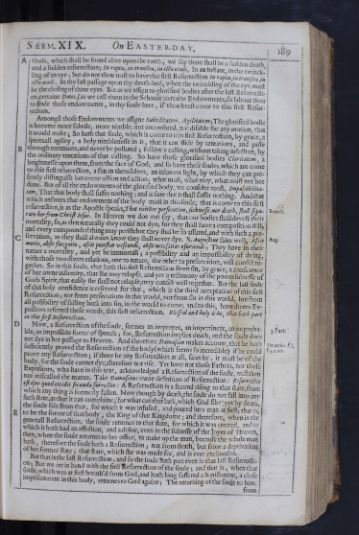 Serm. XIX.
On Easter-day.
189
those, which shall be found alive upon the earth, we say there shall be a sudden death,
Serm. XIX.
On Easter-day.
189
those, which shall be found alive upon the earth, we say there shall be a sudden death,
and a sudden resurrection; In raptu, in transitu, in ictu oculi, In an instant, in the twinck-
ling of an eye; but do not thou trust to have this first Resurrection In raptu, in transitu, in
ictu oculi, In thy last passage upon thy death-bed, when the twinckling of the eye, must
be the closing of thine eyes: But as we assign to glorified bodies after the last Resurrecti-
on, certaine Dotes, (as we call them in the Schoole) certaine Endowments, so labour thou
to finde those endowments, in thy soule here, if thou beest come to this first Resur-
rection. Amongst those Endowments we assigne Subtilitatem, Agilitatem; The glorified bodie
is become more subtile, more nimble, not encumbred, not disable for any motion, that
it would make; So hath that soule, which is come to this first Resurrection, by grace, a
spirituall agility, a holy nimblenesse in it, that it can slide by tentations, and passe
through tentations, and never be polluted; follow a calling, without taking infection, by
the ordinary tentations of that calling. So have those glorified bodies Claritatem, a
brightnesse upon them, from the face of God; and so have these soules, which are come
to this first resurrection, a sun in themselves, an inherent light, by which they can pre-
sently distinguish betweene action and action; what must, what may, what must not bee
done. But of all the endowments of the glorified body, we consider most, Impassibilita-
tem, That that body shall suffer nothing; and is sure that it shall suffer nothing. And that
which answers that endowment of the body most in this soule, that is come to this first
resurrection, is as the Apostle speaks, That neither persecution, sicknesse, nor death,Rom. 8. shall sepa-
rate her from Christ Iesus. In Heaven we doe not say, that our bodies shall devest their
mortality, so, as that naturally they could not dye; for they shall have a composition still;
and every compounded thing may perish: but they shal be so assured, and with such a pre-
servation, as they shall alwaies know they shall never dye. S. Augustine saies well, Aug. Assit
motio, absit fatigatio, assit potestas vescendi, absit necessitas esuriendi; They have in their
nature a mortality, and yet be immortall; a possibility and an impossibility of dying,
with those two divers relations, one to nature, the other to preservation, will consist to-
gether. So in this soule, that hath this first Resurrection from sin, by grace, a conscience
of her owne infirmity, that she may relapse, and yet a testimony of the powerfulnesse of
Gods Spirit, that easily she shall not relapse, may consist well together. But the last seale
of this holy confidence is reserved for that, which is the third acceptation of this first
Resurrection; not from persecutions in this world, nor from sin in this world, but from
all possibility of falling back into sin, in the world to come; and to this, have divers Ex-
positors referred these words, this first resurrection. Blessed and holy is he, that hath part
in this first Resurrection. Now, a Resurrection of the soule, seemes an improper, an impertinent, an 3 Part. improba-
ble, an impossible forme of speech; for, Resurrection implies death, and the soule does
not dye in her passage to Heaven. And therefore Damascen makes account, De ortho. sid.
l.4.c. ult. that he hath
sufficiently proved the Resurrection of the body (which seems so incredible) if he could
prove any Resurrection; if there be any Resurrection at all, saies he, it must be of the
body, for the soule cannot dye, therefore not rise. Yet have not those Fathers, nor those
Expositors, who have in this text, acknowledged a Resurrection of the soule, mistaken
nor miscalled the matter. Take Damascens owne definition of Resurrection: Resurrectio
est ejus quod cecidit secunda surrectio: A Resurrection is a second rising to that state, from
which any thing is formerly fallen. Now though by death, the soule do not fall into any
such state, as that it can complaine, (for what can that lack, which God fils?) yet by death,
the soule fals from that, for which it was infused, and poured into man at first; that is,
to be the forme of that body, the King of that Kingdome; and therefore, when in the
generall Resurrection, the soule returnes to that state, for which it was created, and to
which it hath had an affection, and a desire, even in the fulnesse of the Joyes of Heaven,
then, when the soule returnes to her office, to make up the man, because the whole man
hath, therefore the soule hath a Resurrection; not from death, but from a deprivation
of her former state; that state, which she was made for, and is ever enclined to. But that is the last Resurrection; and so the soule hath part even in that last Resurrecti-
on; But we are in hand with the first Resurrection of the soule; and that is, when that
soule, which was at first breath'd from God, and hath long suffered a banishment, a close
imprisonment in this body, returnes to God againe; The returning of the soule to him, from
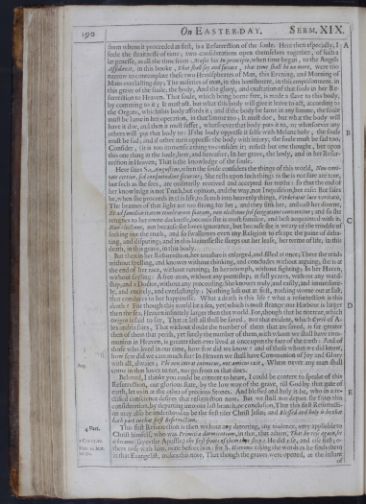 190
On Easter-day.
Serm. XIX.
from whom it proceeded at first, is a Resurrection of the soule. Here then especially, I
190
On Easter-day.
Serm. XIX.
from whom it proceeded at first, is a Resurrection of the soule. Here then especially, I
feele the straitnesse of time; two considerations open themselves together, of such a
largenesse, as all the time from Moses his In principio, when time began, to the Angels
Affidavit, in this booke, That shall say and sweare, that time shall be no more, were too
narrow to contemplate these two Hemispheares of Man, this Evening, and Morning of
Mans everlasting day; The miseries of man, in this banishment, in this emprisonment, in
this grave of the soule, the body, And the glory, and exaltation of that soule in her Re-
surrection to Heaven. That soule, which being borne free, is made a slave to this body,
by comming to it; It must act, but what this body will give it leave to act, according to
the Organs, which this body affords it; and if the body be lame in any limme, the soule
must be lame in her operation, in that limme too; It must doe, but what the body will
have it doe, and then it must suffer, whatsoever that body puts it to, or whatsoever any
others will put that body to: If the body oppresse it selfe with Melancholy, the soule
must be sad; and if other men oppresse the body with injury, the soule must be sad too;
Consider, (it is too immense a thing to consider it) reflect but one thought, but upon
this one thing in the soule, here, and hereafter, In her grave, the body, and in her Resur-
rection in Heaven; That is the knowledge of the soule. Here saies S. Augustine, when the soule considers the things of this world, Non veri-
tate certior, sed consuetudine securior; She rests upon such things as she is not sure are true,
but such as she sees, are ordinarily received and accepted for truths: so that the end of
her knowledge is not Truth, but opinion, and the way, not Inquisition, but ease: But saies
he, when she proceeds in this life, to search into heavenly things, Verberatur luce veritatis,
The beames of that light are too strong for her, and they sink her, and cast her downe,
Et ad familiaritatem tenebrarum suarum, non electione sed fatigatione convertitur; and so she
returnes to her owne darknesse, because she is most familiar, and best acquainted with it;
Non electione, not because she loves ignorance, but because she is weary of the trouble of
seeking out the truth, and so swallowes even any Religion to escape the paine of deba-
ting, and disputing; and in this lazinesse she sleeps out her lease, her terme of life, in this
death, in this grave, in this body. But then in her Resurrection, her measure is enlarged, and filled at once; There she reads
without spelling, and knowes without thinking, and concludes without arguing; she is at
the end of her race, without running; In her triumph, without fighting; In her Haven,
without sayling: A free-man, without any prentiship; at full yeares, without any ward-
ship; and a Doctor, without any proceeding: She knowes truly, and easily, and immediate-
ly, and entirely, and everlastingly; Nothing left out at first, nothing worne out at last,
that conduces to her happinesse. What a death is this life? what a resurrection is this
death? For though this world be a sea, yet (which is most strange) our Harbour is larger
then the sea; Heaven infinitely larger then this world. For, though that be not true, which
Origen is said to say, That at last all shall be saved, nor that evident, which Cyril of A-
lexandria saies, That without doubt the number of them that are saved, is far greater
then of them that perish, yet surely the number of them, with whom we shall have com-
munion in Heaven, is greater then ever lived at once upon the face of the earth: And of
those who lived in our time, how few did we know? and of those whom we did know,
how few did we care much for? In Heaven we shall have Communion of Joy and Glory
with all, Aug. alwaies; Vbi non intrat inimicus, nec amicus exit, Where never any man shall
come in that loves us not, nor go from us that does. Beloved, I thinke you could be content to heare, I could be content to speake of this
Resurrection, our glorious state, by the low way of the grave, till God by that gate of
earth, let us in at the other of precious Stones. And blessed and holy is he, who in a re-
ctified conscience desires that resurrection now. But we shall not depart far from this
consideration, by departing into our last branch, or conclusion, That this first Resurrecti-
on may also be understood to be the first riser Christ Jesus; and Blessed and holy is he that
hath part in that first Resurrection. This first Resurrection is then without any detorting, 4 Part. any violence, very appliable to
Christ himself, who was Primitiæ dormientium, in that, that action, That he rose again, he
is become (sayes the Apostle) the first fruits of them that sleep:1 Cor. 15.20. He did rise, and rise first; o-
Hier. in Mat.
27.52. thers rose with him, none before him: for S. Hierome taking the words as he finds them
in that Euangelist, makes this note, That though the graves were opened, at the instant of
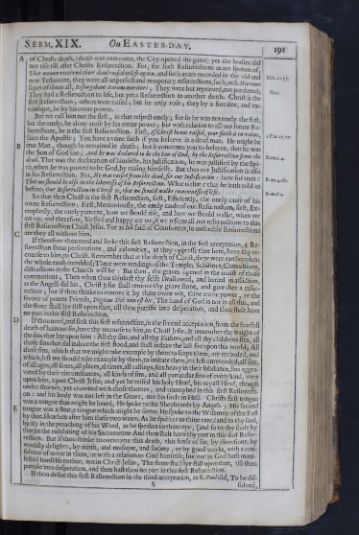 Serm. XIX.
On Easter-day.
191
of Christs death, (death was overcome, the City opened the gates) yet the bodies did
Serm. XIX.
On Easter-day.
191
of Christs death, (death was overcome, the City opened the gates) yet the bodies did
not rise till after Christs Resurrection. For, for such Resurrections as are spoken of,
That women received their dead raised to life again, Heb. 11.35. and such as are recorded in the old and
new Testament, they were all unperfect and temporary resurrections, such, as S. Hierome
sayes of them all, Resurgebant iterum morituri; They were but reprieved, not pardoned;Hier.
They had a Resurrection to life, but yet a Resurrection to another death. Christ is the
first Resurrection; others were raised; but he only rose; they by a forraine, and ex-
trinsique, he by his owne power. But we call him not the first, in that respect onely; for so he was not onely the first,
but the onely; he alone arose by his owne power; but with relation to all our future Re-
surrections, he is the first Resurrection. First, If Christ be not raised, your faith is in vaine, 1 Cor. 15.17.
saies the Apostle; You have a vaine faith if you beleeve in a dead man. He might be
true Man, though he remained in death; but it concernes you to beleeve, that he was
the Son of God too; And he was declared to be the Son of God, Rom. 1.4. by the Resurrection from the
dead. That was the declaration of himselfe, his Justification; he was justified by the Spi-
rit, when he was proved to be God, by raising himselfe. But thus our Justification is also
in his Resurrection. For, He was raised from the dead, for our Iustification: Rom. 4. ult. how for ours?
That we should be also in the likenesse of his Resurrection. What is that? that he hath told us
before; Our Resurrection in Christ is, that we should walke in newnesse of life.Rom. 6.4. So that then Christ is the first Resurrection, first, Efficiently, the onely cause of his
owne Resurrection; First, Meritoriously, the onely cause of our Resurrection; first, Ex-
emplarily, the onely patterne, how we should rise, and how we should walke, when we
are up; and therefore, Blessed and happy are we, if we referre all our resurrections to this
first Resurrection Christ Jesus. For as Iob said of Comforters, so miserable Resurrections
are they all without him. If therefore thou need and seeke this first Resurrection, in the first acceptation, a Re-
surrection from persecutions, and calamities, as they oppresse thee here, have thy re-
course to him, to Christ. Remember that at the death of Christ, there were earthquakes;
the whole earth trembled; There were rendings of the Temple; Schismes, Convulsions,
distractions in the Church will be: But then, the graves opened in the midst of those
commotions; Then when thou thinkest thy selfe swallowed, and buried in affliction,
as the Angell did his, Christ Jesus shall remove thy grave stone, and give thee a resur-
rection; but if thou thinke to remove it by thine owne wit, thine owne power, or the
favour of potent Friends, Digitus Dei non est hic, The hand of God is not in all this, and
the stone shall lye still upon thee, till thou putrifie into desperation, and thou shalt have
no part in this first Resurrection. If thou need, and seek this first resurrection, in the second acceptation, from the fearfull
death of hainous sin, have thy recourse to him, to Christ Jesus, & remember the waight of
the sins that lay upon him: All thy sins, and all thy Fathers, and all thy childrens sins, all
those sins that did induce the first flood, and shall induce the last fire upon this world; All
those sins, which that we might take example by them to scape them, are recorded, and
which, lest we should take example by them, to imitate them, are left unrecorded; all sins,
of all ages, all sexes, all places, alall times, all callings, sins heavy in their substance, sins aggra-
vated by their circumstances, all kinds of sins, and all particular sins of every kind, were
upon him, upon Christ Jesus; and yet he raised his holy Head, his royall Head, though
under thornes, yet crowned with those thornes, and triumphed in this first Resurrecti-
on: and his body was not left in the Grave, nor his soule in Hell. Christs first tongue
was a tongue that might be heard, He spoke to the Shepheards by Angels; His second
tongue was a Star, a tongue which might be seene; He spoke to the Wisemen of the East
by that. Hearken after him these two waies; As he speakes to thine eare, (and to thy soul,
by it) in the preaching of his Word, as he speakes to thine eye, (and so to thy soule by
that) in the exhibiting of his Sacraments: And thou shalt have thy part in this first Resur-
rection. But if thou thinke to overcome this death, this sense of sin, by diversions, by
worldly delights, by mirth, and musique, and society, or by good works, with a con-
fidence of merit in them, or with a relation to God himselfe, but not as God hath mani-
fested himselfe to thee, not in Christ Jesus, The stone shall lye still upon thee, till thou
putrifie into desperation, and then hast thou no part in this first Resurrection. If thou desire this first Resurrection in the third acceptation, as S. Paul did, To be dis-
S solved,
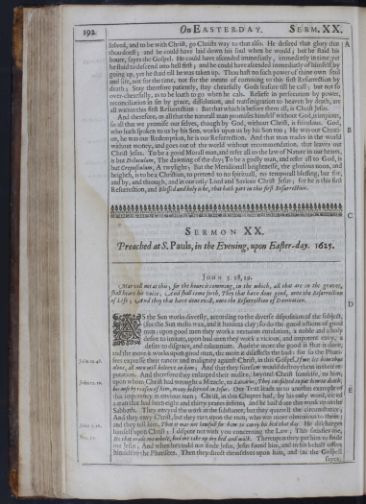 192
On Easter-day.
Serm. XX.
solved, and to be with Christ, go Christs way to that also. He desired that glory that
192
On Easter-day.
Serm. XX.
solved, and to be with Christ, go Christs way to that also. He desired that glory that
thou doest; and he could have laid down his soul when he would; but he staid his
houre, sayes the Gospel. He could have ascended immediatly, immediatly in time, yet
he staid to descend into hell first; and he could have ascended immediatly of himself, by
going up, yet he staid till he was taken up. Thou hast no such power of thine own soul
and life, not for the time, not for the means of comming to this first Resurrection by
death; Stay therefore patiently, stay chearfully Gods leasure till he call; but not so
over-chearfully, as to be loath to go when he cals. Reliefe in persecution by power,
reconciliation in sin by grace, dissolution, and transmigration to heaven by death, are
all within this first Resurrection: But that which is before them all, is Christ Jesus. And therefore, as all that the naturall man promises himself without God, is impious,
so all that we promise our selves, though by God, without Christ, is frivolous. God,
who hath spoken to us by his Son, works upon us by his Son too; He was our Creati-
on, he was our Redemption, he is our Resurrection. And that man trades in the world
without money, and goes out of the world without recommendation, that leaves out
Christ Jesus. To be a good Morall man, and refer all to the law of Nature in our hearts,
is but Diluculum, The dawning of the day; To be a godly man, and refer all to God, is
but Crepusculum, A twylight; But the Meridionall brightnesse, the glorious noon, and
heighth, is to be a Christian, to pretend to no spirituall, no temporall blessing, but for,
and by, and through, and in our only Lord and Saviour Christ Jesus; for he is this first
Resurrection, and Blessed and holy is he, that hath part in this first Resurrection.
Sermon XX.
Preached at S. Pauls, in the Evening, upon Easter-day. 1625.
John 5. 28, 29. Marvell not at this; for the houre is comming, in the which, all that are in the graves,
shall heare his voice; And shall come forth, They that have done good, unto the Resurrection
of Life; And they that have done evill, unto the Resurrection of Damnation. ASAs the Sun works diversly, according to the diverse disposition of the subject,
(for the Sun melts wax, and it hardens clay) so do the good actions of good
men: upon good men they work a vertuous emulation, a noble and a holy
desire to imitate, upon bad men they work a vicious, and impotent envy, a
desire to disgrace, and calumniate. And the more the good is that is done,
and the more it works upon good men, the more it disaffects the bad: for so the Phari-
sees expresse their rancor and malignity against Christ, John 11.48. in this Gospel, If we let him thus
alone, all men will beleeve in him; And that they foresaw would destroy them in their re-
putation. And therefore they enlarged their malice, beyond Christ himselfe, to him,
upon whom Christ had wrought a Miracle, John 12.10. to Lazarus, They consulted to put him to death,
because by reason of him, many beleeved in Iesus. Our Text leads us to another example of
this impotency in envious men; Christ, in this Chapter had, by his only word, cured
a man that had been eight and thirty yeares infirm; and he had done this work upon the
Sabbath. They envyed the work in the substance, but they quarrell the circumstance;
And they envy Christ, but they turn upon the man, who was more obnoxious to them;
and they tell him, John 5.10. That it was not lawfull for him to carry his bed that day. He discharges
himself upon Christ; I dispute not with you concerning the Law; This satisfies me,
He that made me whole,Ver. 11. bad me take up my bed and walk. Thereupon they put him to finde
out Jesus; And when he could not finde Jesus, Jesus found him, and in his behalf offers
himself to the Pharisees. Then they direct themselves upon him, and (as the Gospell sayes)
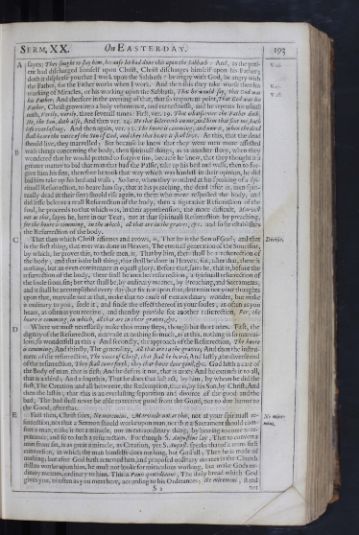 Serm. XX.
On Easter-day.
193
sayes) They sought to slay him, because he had done this upon the Sabbath: And, V. 16. as the pati-
Serm. XX.
On Easter-day.
193
sayes) They sought to slay him, because he had done this upon the Sabbath: And, V. 16. as the pati-ent had discharged himself upon Christ, Christ discharges himself upon his Father;
doth it displease you that I work upon the Sabbath? be angry with God, be angry with
the Father, for the Father works when I work.V. 17. And then this they take worse then his
working of Miracles, or his working upon the Sabbath, That he would say, that God was V. 18.
his Father; And therfore in the averring of that, that so important point, That God was his
Father, Christ grows into a holy vehemence, and earnestnesse, and he repeats his usuall
oath, Verily, verily, three severall times: First, ver. 19. That whatsoever the Father doth,
He, the Son, doth also, And then ver. 24. He that beleeveth on me, and him that sent me, hath
life everlasting. And then again, ver. 25. The houre is comming, and now is, when the dead
shall heare the voice of the Son of God, and they that heare it shall live. At this, that the dead
should live, they marvelled; But because he knew that they were men more affected
with things concerning the body, then spirituall things, as in another story, when they
wondered that he would pretend to forgive sins, because he knew, that they thought it a
greater matter to bid that man that had the Palsie, take up his bed and walk, then to for-
give him his sins, therefore he took that way which was hardest in their opinion, he did
bid him take up his bed and walk; So here, when they wondred at his speaking of a spi-
rituall Resurrection, to heare him say, that at his preaching, the dead (that is, men spiri-
tually dead in their sins) should rise again, to them who more respected the body, and
did lesse beleeve a reall Resurrection of the body, then a figurative Resurrection of the
soul, he proceeds to that which was, in their apprehension, the more difficult, Marvell
not at this, sayes he, here in our Text; not at that spirituall Resurrection by preaching,
for the houre is comming, in the which, all that are in the graves, &c. and so he establishes
the Resurrection of the body. That then which Christ affirmes and avows, is, That he is the Son of God;Divisio. and that
is the first thing, that ever was done in Heaven, The eternall generation of the Son: that,
by which, he proves this, to these men, is, That by him, there shall be a resurrection of
the body; and that is the last thing, that shall be done in Heaven, for, after that, there is
nothing, but an even continuance in equall glory. Before that, saies he, that is, before the
resurrection of the body, there shall be another resurrection, a spirituall resurrection of
the soule from sin; but that shall be, by ordinary meanes, by Preaching, and Sacraments,
and it shall be accomplished every day; but fix not upon that, determin not your thoughts
upon that, marvaile not at that, make that no cause of extraordinary wonder, but make
it ordinary to you, feele it, and finde the effect thereof in your soules, as often as you
heare, as often as you receive, and thereby provide for another resurrection, For, the
houre is comming, in which, all that are in their graves, &c. Where we must necessarily make thus many steps, though but short ones. First, the
dignity of the Resurrection, marvaile at nothing so much, as at this, nothing is so marvai-
lous, so wonderfull as this; And secondly, the approach of the Resurrection, The houre
is comming; And thirdly, The generality, All that are in the graves; And then the instru-
ment of the resurrection, The voice of Christ, that shall be heard; And lastly, the diverse end
of the resurrection, They shall come forth, they that have done good, &c. God hath a care of
the Body of man, that is first; And he defers it not, that is next; And he extends it to all,
that is a third; And a fourth is, That he does that last act, by him, by whom he did the
first, The Creation, and all betweene, the Redemption, that is, by his Son, by Christ; And
then the last is, that this is an everlasting separation and divorce of the good and the
bad, The bad shall never be able to receive good from the Good, nor to doe harme to
the Good, after that. First then, Christ saies, Ne miremini, Marvaile not at this,Ne mire-
mini. not at your spirituall re-
surrection, not that a Sermon should worke upon man, not that a Sacrament should com-
fort a man, make it not a miracle, nor an extraordinary thing, by hearing to come to re-
pentance, and so to such a resurrection. For though S. Augustine say, That to convert a
man from sin, is as great a miracle, as Creation, yet S. August. speaks that of a mans first
conversion, in which the man himselfe does nothing, but God all; Then he is made of
nothing; but after God hath renewed him, and proposed ordinary meanes in the Church
still to worke upon him, he must not looke for miraculous working, but make Gods or-
dinary meanes, ordinary to him. This is Panis quotidianus, The daily bread which God
gives you, as often as you meet here, according to his Ordinances; Ne miremini, stand S2 not
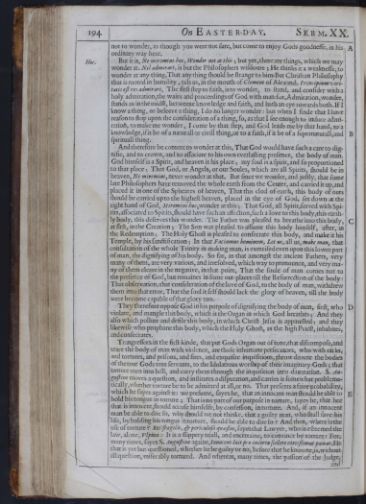 194
On Easter-day.
Serm. XX.
not to wonder, as though you were not sure, but come to enjoy Gods goodnesse, in his
194
On Easter-day.
Serm. XX.
not to wonder, as though you were not sure, but come to enjoy Gods goodnesse, in his
ordinary way here. But it is, Hoc. Ne miremini hoc, Wonder not at this; but yet, there are things, which we may
wonder at. Nil admirari, is but the Philosophers wisdome; He thinks it a weaknesse, to
wonder at any thing, That any thing should be strange to him: But Christian Philosophy
that is rooted in humility, tels us, in the mouth of Clement of Alexand. Principium veri-
tatis est res admirari, The first step to faith, is to wonder, to stand, and consider with a
holy admiration, the waies and proceedings of God with man: for, Admiration, wonder,
stands as in the midst, betweene knowledge and faith, and hath an eye towards both. If I
know a thing, or beleeve a thing, I do no longer wonder: but when I finde that I have
reason to stop upon the consideration of a thing, so, as that I see enough to induce admi-
ration, to make me wonder, I come by that step, and God leads me by that hand, to a
knowledge, if it be of a naturall or civill thing, or to a faith, if it be of a supernaturall, and
spirituall thing. And therefore be content to wonder at this, That God would have such a care to dig-
nifie, and to crown, and to associate to his own everlasting presence, the body of man.
God himself is a Spirit, and heaven is his place; my soul is a spirit, and so proportioned
to that place; That God, or Angels, or our Soules, which are all Spirits, should be in
heaven, Ne miremini, never wonder at that. But since we wonder, and justly, that some
late Philosophers have removed the whole earth from the Center, and carried it up, and
placed it in one of the Spheares of heaven, That this clod of earth, this body of ours
should be carried up to the highest heaven, placed in the eye of God, set down at the
right hand of God, Miremini hoc, wonder at this; That God, all Spirit, served with Spi-
rits, associated to Spirits, should have such an affection, such a love to this body, this earth-
ly body, this deserves this wonder. The Father was pleased to breathe into this body,
at first, in the Creation; The Son was pleased to assume this body himself, after, in
the Redemption; The Holy Ghost is pleased to consecrate this body, and make it his
Temple, by his sanctisication; In that Faciamus hominem, Let us, all us, make man, that
consuitation of the whole Trinity in making man, is exercised even upon this lower part
of man, the dignifying of his body. So far, as that amongst the ancient Fathers, very
many of them, are very various, and irresolved, which way to pronounce, and very ma-
ny of them cleare in the negative, in that point, That the soule of man comes not to
the presence of God, but remaines in some out-places till the Resurrection of the body:
That observation, that consideration of the love of God, to the body of man, withdrew
them into that error, That the soul it self should lack the glory of heaven, till the body
were become capable of that glory too. They therefore oppose God in his purpose of dignifying the body of man, first, who
violate, and mangle this body, which is the Organ in which God breathes; And they
also which pollute and defile this body, in which Christ Jesus is apparelled; and they
likewise who prophane this body, which the Holy Ghost, as the high Priest, inhabites,
and consecrates. Trangressors in the first kinde, that put Gods Organ out of tune, that discompose, and
teare the body of man with violence, are those inhumane persecutors, who with racks,
and tortures, and prisons, and fires, and exquisite inquisitions, throw downe the bodies
of the true Gods true servants, to the Idolatrous worship of their imaginary Gods; that
torture men into hell, and carry them through the inquisition into damnation. S. Au-
gustine moves a question, and institutes a disputation, and carries it somewhat problema-
tically, whether torture be to be admitted at all, or no. That presents a faire probability,
which he sayes against it: we presume, sayes he, that an innocent man should be able to
hold his tongue in torture; That is no part of our purpose in torture, sayes he, that hee
that is innocent, should accuse himselfe, by confession, in torture. And, if an innocent
man be able to doe so, why should we not thinke, that a guilty man, who shall save his
life, by holding his tongue in torture, should be able to doe so? And then, where is the
use of torture? Res fragilis, & periculosa quæstio, sayes that Lawyer, who is esteemed the
law, alone, Vlpian: It is a slippery triall, and uncertaine, to convince by torture: For,
many times, sayes S. Augustine againe, Innocens luit pro incerto scelere certissimas pœnas, He
that is yet but questioned, whether he be guilty or no, before that be knowne, is, without
all question, miserably tortured. And whereas, many times, the passion of the Judge, and
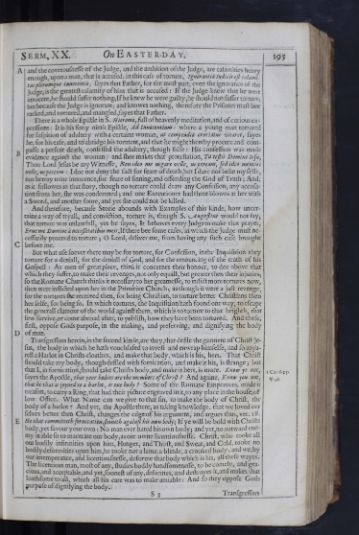 Serm. XX.
On Easter-day.
195
and the covetousnesse of the Judge, and the ambition of the Judge, are calamities heavy
Serm. XX.
On Easter-day.
195
and the covetousnesse of the Judge, and the ambition of the Judge, are calamities heavy
enough, upon a man, that is accused, in this case of torture, Ignorantia Iudicis est calami-
tas plerumque innocentis, sayes that Father, for the most part, even the ignorance of the
Judge, is the greatest calamity of him that is accused: If the Judge knew that he were
innocent, he should suffer nothing; If he knew he were guilty, he should not suffer torture;
but because the Judge is ignorant, and knowes nothing, therefore the Prisoner must bee
racked, and tortured, and mangled, sayes that Father. There is a whole Epistle in S. Hierome, full of heavenly meditation, and of curious ex-
pressions: It is his forty ninth Epistle, Ad Innocentium: where a young man tortured
for suspition of adultery with a certaine woman, ut compendio cruciatus vitaret, sayes
he, for his ease, and to abridge his torment, and that he might thereby procure and com-
passe a present death, confessed the adultery, though false: His confession was made
evidence against the woman: and shee makes that protestation, Tu testis Domine Iesu,
Thou Lord Jesus be my Witnesse, Non ideo me negare velle, ne peream, sed ideo mentiri
nolle, ne peccem: I doe not deny the fact for feare of death, but I dare not belie my selfe,
nor betray mine innocence, for feare of sinning, and offending the God of Truth; And,
as it followes in that story, though no torture could draw any Confession, any accusa-
tion from her, she was condemned; and one Executioner had three blowes at her with
a Sword, and another foure, and yet she could not be killed. And therefore, because Storie abounds with Examples of this kinde, how uncer-
taine a way of tryall, and conviction, torture is, though S. Augustine would not say,
that torture was unlawfull, yet he sayes, It behoves every Judge to make that prayer,
Erue me Domine à necessitatibus meis, If there bee some cases, in which the Judge must ne-
cessarily proceed to torture; O Lord, deliver me, from having any such case brought
before me. But what use soever there may be for torture, for Confession, in the Inquisition they
torture for a deniall, for the deniall of God, and for the renouncing of the truth of his
Gospell: As men of great place, think it concernes their honour, to doe above that
which they suffer, to make their revenges, not only equall, but greater then their injuries;
so the Romane Church thinks it necessary to her greatnesse, to inflict more tortures now,
then were inflicted upon her in the Primitive Church; as though it were a just revenge,
for the tortures she received then, for being Christian, to torture better Christians then
her selfe, for being so. In which tortures, the Inquisition hath found one way, to escape
the generall clamour of the world against them, which is to torture to that heighth, that
few survive, or come abroad after, to publish, how they have been tortured. And these,
first, oppose Gods purpose, in the making, and preserving, and dignifying the body
of man. Transgressors herein, in the second kinde, are they, that defile the garment of Christ Je-
sus, the body in which he hath vouchsafed to invest and enwrap himselfe, and so appa-
rell a Harlot in Christs cloathes, and make that body, which is his, hers. That Christ
should take my body, though defiled with fornication, and make it his, is strange; but
that I, in fornication, should take Christs body, and make it hers, is more. Know ye not,
1 Cor. 6.15. sayes the Apostle, that your bodies are the members of Christ? And againe, Know you not,
that he that is joyned to a harlot, is one body? Some of the Romane Emperours, made it V. 16.
treason, to carry a Ring, that had their picture engraved in it, to any place in the house, of
low Office. What Name can we give to that sin, to make the body of Christ, the
body of a harlot? And yet, the Apostle there, as taking knowledge, that we loved our
selves better then Christ, changes the edge of his argument, and argues thus, ver. 18.
He that committeth fornication, sinneth against his own body; If ye will be bold with Christs
body, yet favour your own: No man ever hated his own body; and yet, no outward ene-
my is able so to macerate our body, as our owne licentiousnesse. Christ, who tooke all
our bodily infirmities upon him, Hunger, and Thirst, and Sweat, and Cold, tooke no
bodily deformities upon him, he tooke not a lame, a blinde, a crooked body; and we, by
our intemperance, and licentiousnesse, deforme that body which is his, all these wayes.
The licentious man, most of any, studies bodily handsomenesse, to be comely, and gra-
cious, and acceptable, and yet, soonest of any, deformes, and destroyes it, and makes that
loathsome to all, which all his care was to make amiable: And so they oppose Gods
purpose of dignifying the body. S3 Transgressors
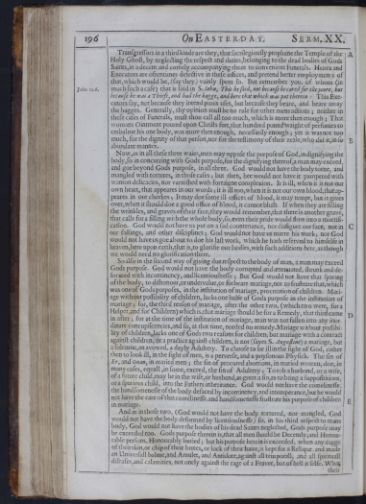 196
On Easter-day.
Serm. XX.
Transgressors in a third kinde are they, that sacrilegiously prophane the Temple of the
196
On Easter-day.
Serm. XX.
Transgressors in a third kinde are they, that sacrilegiously prophane the Temple of the
Holy Ghost, by neglecting the respect and duties, belonging to the dead bodies of Gods
Saints, in a decent and comely accompanying them to convenient Funerals. Heires and
Executors are oftentimes defective in these offices, and pretend better employments of
that, which would be, (say they) vainly spent so. But remember you, of whom (in
much such a case) that is said in S. Iohn,John 12.6. This he said, not because he cared for the poore, but
because he was a Thiefe, and had the bagge, and bore that which was put therein: This Exe-
cutors say, not because they intend pious uses, but because they beare, and beare away
the bagges. Generally, thy opinion must be no rule for other mens actions; neither in
these cases of Funerals, must thou call all too much, which is more then enough; That
womans Ointment poured upon Christs feet, that hundred pound waight of perfumes to
embalme his one body, was more then enough, necessarily enough; yet it was not too
much, for the dignity of that person, nor for the testimony of their zeale, who did it, in so
abundant manner. Now, as in all these three waies, men may oppose the purpose of God, in dignifyingin indignifying the
body, so in concurring with Gods purpose, for the dignifying thereof, a man may exceed,
and goe beyond Gods purpose, in all three. God would not have the body torne, and
mangled with tortures, in those cases; but then, hee would not have it pampered with
wanton delicacies, nor varnished with forraigne complexion. It is ill, when it is not our
own heart, that appeares in our words; it is ill too, when it is not our own blood, that ap-
peares in our cheekes; It may doe some ill offices of blood, it may tempt, but it gives
over, when it should doe a good office of blood, it cannot blush. If when they are filling
the wrinkles, and graves of their face, they would remember, that there is another grave,
that calls for a filling with the whole body, so, even their pride would flow into a mortifi-
cation. God would not have us put on a sad countenance, nor disfigure our face, not in
our fastings, and other disciplines; God would not have us marre his work; nor God
would not have us goe about to doe his last work, which he hath reserved to himselfe in
heaven, here upon earth, that is, to glorifie our bodies, with such additions here, as though
we would need no glorification there. So also in the second way of giving due respect to the body of man, a man may exceed
Gods purpose. God would not have the body corrupted and attenuated, shrunk and de-
formed with incontinency, and licentiousnesse; But God would not have that sparing
of the body, to dishonour, or undervalue, or forbeare mariage, nor to frustrate that, which
was one of Gods purposes, in the institution of mariage, procreation of children. Mari-
age without possibility of children, lacks one halfe of Gods purpose in the institution of
mariage; for, the third reason of mariage, after the other two, (which two were, for a
Helper, and for Children) which is, that mariage should be for a Remedy, that third came
in after; for at the time of the institution of mariage, man was not fallen into any inor-
dinate concupiscencies, and so, at that time, needed no remedy. Mariage without possibi-
lity of children, lacks one of Gods two reasons for children; but mariage with a contract
against children, or a practice against children, is not (sayes S. Augustine) a mariage, but
a solemne, an avowed, a dayly Adultery. To choose to be ill in the sight of God, rather
then to look ill, in the sight of men, is a perverse, and a poysonous Physick. The sin of
Er, and Onan, in maried men; the sin of procured abortions, in maried women, doe, in
many cases, equall, in some, exceed, the sin of Adultery; To rob a husband, or a wife,
of a future child, may be in the wife, or husband, as great a sin, as to bring a supposititious,
or a spurious child, into the Fathers inheritance. God would not have the comelinesse,
the handsomenesse of the body defaced by incontinency, and intemperance, but he would
not have the care of that comelinesse, and handsomenesse frustrate his purpose of children
in mariage. And as in those two, (God would not have the body tortured, nor mangled, God
would not have the body deformed by licentiousnesse) so, in his third respect to mans
body, God would not have the bodies of his dead Saints neglected, Gods purpose may
be exceeded too. Gods purpose therein is, that all men should be Decently; and Honou-
rable persons, Honourably buried; but his purpose herein is exceeded, when any ragge
of their skin, or chip of their bones, or lock of their haire, is kept for a Relique, and made
an Universall balme, and Amulet, and Antidote, against all temporall, and all spirituall
diseases, and calamities, not onely against the rage of a Feaver, but of hell it selfe. What their
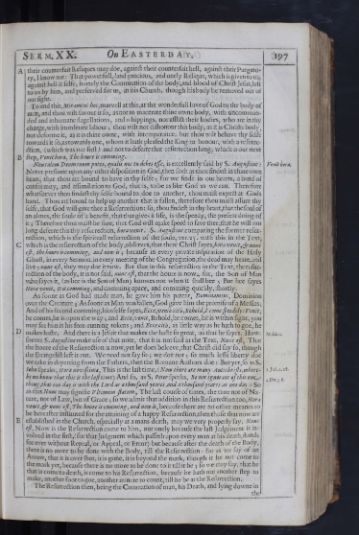 Serm. XX.
On Easter-day.
197
their counterfait Reliques may doe, against their counterfait hell, against their Purgato-
Serm. XX.
On Easter-day.
197
their counterfait Reliques may doe, against their counterfait hell, against their Purgato-ry, I know not: That powerfull, and precious, and onely Relique, which is given to us,
against hell it selfe, is onely the Communion of the body, and blood of Christ Jesus, left
to us by him, and preserved for us, in his Church, though his body be removed out of
our sight. To end this, Miramini hoc, marvell at this, at the wonderfull love of God to the body of
man, and thou wilt favour it so, as not to macerate thine owne body, with uncomman-
ded and inhumane flagellations, and whippings, nor afflict their bodies, who are in thy
charge, with inordinate labour; thou wilt not dishonour this body, as it is Christs body,
nor deforme it, as it is thine owne, with intemperance, but thou wilt behave thy selfe
towards it so, as towards one, whom it hath pleased the King to honour, with a resurre-
ction, (which was our first) and not to deferre that resurrection long, which is our next
step, Venit hora, The houre is comming. Non talem Deum tuum putes, qualis nec tu debes esse, is excellently said by S. Augustine:Venit hora.
Never presume upon any other disposition in God, then such as thou findest in thine own
heart, that thou art bound to have in thy selfe; for we finde in our hearts, a band of
conformity, and assimilation to God, that is, to be as like God as we can. Therefore
whatsoever thou findest thy selfe bound to doe to another, thou maist expect at Gods
hand. Thou art bound to help up another that is fallen, therefore thou maist assure thy
selfe, that God will give thee a Resurrection: so, thou findest in thy heart, that the soul of
an almes, the soule of a benefit, that that gives it life, is the speedy, the present doing of
it; Therefore thou maist be sure, that God will make speed to save thee, that he will not
long deferre this thy resurrection, hora venit. S. Augustine comparing the former resur-
rection, which is the spirituall resurrection of the soule, ver. 25. with this in the Text,
which is the resurrection of the body, observes, that there Christ sayes, hora venit, & nunc
est, the houre is comming, and now is; because in every private inspiration of the Holy
Ghost, in every Sermon, in every meeting of the Congregation, the dead may heare, and
live; nunc est, they may doe it now. But that in this resurrection in the Text, the resur-
rection of the body, it is not said, nunc est, that the houre is now; for, the Son of Man
who sayes it, (as hee is the Son of Man) knowes not when it shall bee; But hee sayes
Hora venit, It is comming, and comming apace, and comming quickly, shortly. As soone as God had made man, he gave him his patent, Dominamini, Dominion
over the Creature; As soone as Man was fallen, God gave him the promise of a Messias;
And of his second comming, himselfe sayes, Ecce, venio citò, Behold, I come speedily: Venit,
he comes, he is upon the way; and Ecce, venit, Behold, he comes, he is within sight, you
may see him in his fore-running tokens; and Ecce citò, as little way as he hath to goe, he
makes haste, And there is a Jesuit that makes the haste so great, as that he sayes, Maldon. How-
soever S. Augustine make use of that note, that it is not said in the Text, Nunc est, That
the houre of the Resurrection is now, yet he does beleeve, that Christ did say so, though
the Euangelist left it out. We need not say so; we doe not; so much lesse liberty doe
we take in departing from the Fathers, then the Romane Authors doe: But yet, so as S.
Iohn speaks, Hora novissima, This is the last time, (Now there are many Antichrists,1 Joh. 2.18. where-
by we know that this is the last time) And so, as S. Peter speaks, 2 Pet. 3.8. Be not ignorant of this one
thing, that one day is with the Lord as a thousand yeares, and a thousand yeares as one day: So
as this Nunc may signifie Vltimum statum, The last course of times, the time not of Na-
ture, nor of Law, but of Grace; so we admit that addition in this Resurrection too, Hora
venit, & nunc est, The houre is comming, and now is, because there are no other meanes to
be hereafter instituted for the attaining of a happy Resurrection, then those that now are
established in the Church, especially at a mans death, may we very properly say, Nunc
est, Now is the Resurrection come to him, not onely because the last Judgement is in-
volved in the first, (for that Judgment which passeth upon every man at his death, stands
for ever without Repeal, or Appeal, or Error) but because after the death of the Body,
there is no more to be done with the Body, till the Resurrection; for as we say of an
Arrow, that it is over shot, it is gone, it is beyond the mark, though it be not come to
the mark yet, because there is no more to be done to it till it be; so we may say, that he
that is come to death, is come to his Resurrection, because he hath not another step to
make, another foot to goe, another minute to count, till he be at the Resurrection. The Resurrection then, being the Coronation of man, his Death, and lying downe in the
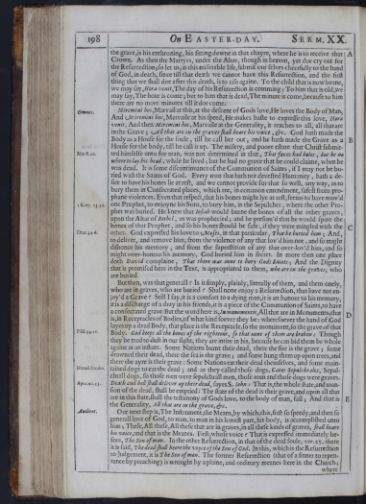 198
On Easter-day.
Serm. XX.
the grave, is his enthroning, his sitting downe in that chayre, where he is to receive that
198
On Easter-day.
Serm. XX.
the grave, is his enthroning, his sitting downe in that chayre, where he is to receive that
Crown. As then the Martyrs, under the Altar, though in heaven, yet doe cry out for
the Resurrection; so let us, in this miserable life, submit our selves cheerfully to the hand
of God, in death, since till that death we cannot have this Resurrection, and the first
thing that we shall doe after this death, is to rise againe. To the child that is now borne,
we may say, Hora venit, The day of his Resurrection is comming; To him that is old, we
may say, The hour is come; but to him that is dead, The minute is come, because to him
there are no more minutes till it doe come. Miremini hoc,Omnes. Marvail at this, at the descent of Gods love, He loves the Body of Man,
And Miremini hoc, Mervaile at his speed, He makes haste to expresse this love, Hora
venit, And then Miremini hoc, Marvaile at the Generality, it reaches to all, all that are
in the Grave; All that are in the graves shall heare his voice, &c. God hath made the
Body as a House for the soule, till he call her out, and he hath made the Grave as a
House for the body, till he call it up. The misery, and poore estate that Christ submit-
ted himselfe unto for man, Mat 8.20. was not determined in that, That foxes had holes, but he no
where to lay his head, while he lived; but he had no grave that he could claime, when he
was dead. It is some discontinuance of the Communion of Saints, if I may not be bu-
ried with the Saints of God. Every man that hath not devested Humanity, hath a de-
sire to have his bones lie at rest, and we cannot provide for that so well, any way, as to
bury them in Consecrated places, which are, in common entendment, safest from pro-
phane violences. Even that respect, that his bones might lye at rest, seems to have mov'd
one Prophet, 1 King. 13.31. to enjoyne his Sons, to bury him, in the Sepulcher, where the other Pro-
phet was buried. He knew that Iosiah would burne the bones of all the other graves,
upon the Altar of Bethel, as was prophecied; and he presum'd that he would spare the
bones of that Prophet, and so his bones should be safe, if they were mingled with the
other.Deut. 34.6. God expressed his love to Moses, in that particular, That he buried him; And,
to deliver, and remove him, from the violence of any that lov'd him not, and so might
dishonor his memory, and from the superstition of any that over-lov'd him, and so
might over-honour his memory, God buried him in secret. In more then one place
doth David complaine, That there was none to bury Gods Saints; And the Dignity
that is promised here in the Text, is appropriated to them, who are in the graves, who
are buried. But then, was that generall? Is it simply, plainly, literally of them, and them onely,
who are in graves, who are buried? Shall none enjoy a Resurrection, that have not en-
joy'd a Grave? Still I say, it is a comfort to a dying man, it is an honour to his memory,
it is a discharge of a duty in his friends, it is a piece of the Communion of Saints, to have
a consecrated grave: But the word here is, In monumentis, All that are in Monuments; that
is, in Receptacles of Bodies, of what kind soever they be: wheresoever the hand of God
layes up a dead Body, that place is the Receptacle, so the monument, so the grave of that
Body.Psal. 34.20. God keeps all the bones of the righteous, so that none of them are broken: Though
they be trod to dust in our sight, they are intire in his, because he can bid them be whole
againe in an instant. Some Nations burnt their dead, there the fire is the grave; some
drowned their dead, there the sea is the grave; and some hung them up upon trees, and
there the ayre is their grave: Some Nations eat their dead themselves, and some main-
tained dogs to eat the dead;Herod. Strabo. and as they called those dogs, Canes Sepulchrales, Sepul-
chrall dogs, so those men were sepulchrall men, those men and those dogs were graves.
Death and hell shall deliver up their dead,Apoc. 20.13. sayes S. Iohn: That is, the whole state, and man-
sion of the dead, shall be emptied: The state of the dead is their grave, and upon all that
are in this state, shall the testimony of Gods love, to the body of man, fall; And that is
the Generality, All that are in the grave, &c. Our next step is, Audient. The Instrument, the Means, by which, this, first so speedy, and then so
generall love of God, to man, to man in his lowest part, his body, is accomplished unto
him; These, All these, All these that are in graves, in all these kinds of graves, shall heare
his voice, and that is the Meanes. First, whose voice? That is expressed immediately be-
fore, The Son of man. In the other Resurrection, in that of the dead soule, ver. 25. there
it is said, The dead shall heare the voyce of the Son of God. In this, which is the Resurrection
to Judgement, it is The Son of man. The former Resurrection (that of a sinner to repen-
tance by preaching) is wrought by a plaine, and ordinary meanes here in the Church; where
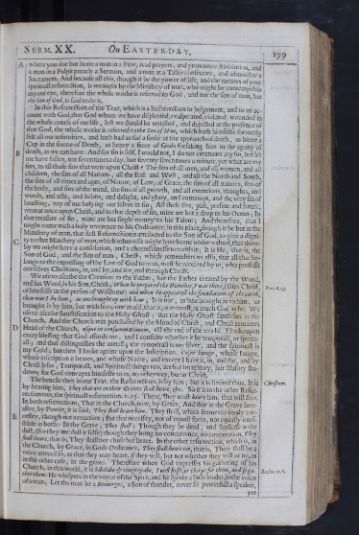 Serm. XX.
On Easter-day.
199
where you doe but heare a man in a Pew, read prayers, and pronounce Absolution, and
Serm. XX.
On Easter-day.
199
where you doe but heare a man in a Pew, read prayers, and pronounce Absolution, and
a man in a Pulpit preach a Sermon, and a man at a Table consecrate, and administer a
Sacrament; And because all this, though it be the power of life, and the meanes of your
spirituall resurrection, is wrought by the Ministery of man, who might be contemptible
in your eye, therefore the whole worke is referred to God, and not the son of man, but
the Son of God, is said to do it. In this Resurrection of the Text, which is a Resurrection to Judgement, and to an ac-
count with God, that God whom we have displeased, exasperated, violated, wounded in
the whole course of our life, lest we should be terrified, and dejected at the presence of
that God, the whole worke is referred to the Son of Man, which hath himselfe formerly
felt all our infirmities, and hath had as sad a soule at the approach of death, as bitter a
Cup in the forme of Death, as heavy a feare of Gods forsaking him in the agony of
death, as we can have: And for sin it self, I would not, I do not extenuate my sin, but let
me have fallen, not seven times a day, but seventy seven times a minute, yet what are my
sins, to all those sins that were upon Christ? The sins of all men, and all women, and all
children, the sins of all Nations, all the East and West, and all the North and South,
the sins of all times and ages, of Nature, of Law, of Grace, the sins of all natures, sins of
the body, and sins of the mind, the sins of all growth, and all extentions, thoughts, and
words, and acts, and habits, and delight, and glory, and contempt, and the very sin of
boasting, nay of our belying our selves in sin; All these sins, past, present and future,
were at once upon Christ, and in that depth of sin, mine are but a drop to his Ocean; In
that treasure of sin, mine are but single money to his Talent; And therefore, that I
might come with a holy reverence to his Ordinance, in this place, though it be but in the
Ministery of man, that first Resurrection is attributed to the Son of God, to give a digni-
ty to that Ministery of man, which otherwise might have beene under-valued, that there-
by we might have a consolation, and a cheerefulnesse towards it; It is He, that is, the
Son of God, and the Son of man, Christ; which remembers us alfo, that all that be-
longs to the expressing of the Law of God to man, must be received by us, who professe
our selves Christians, in, and by, and for, and through Christ. We use to ascribe the Creation to the Father, but the Father created by the Word,
and his Word, is his Son, Christ; When he prepared the Heavens, I was there, Prov. 8.27. (saies Christ,
of himselfe in the person of Wisdome) and when he appointed the foundations of the earth,
then was I by him, as one brought up with him; It is not, as one brought in to him, or
brought in by him, but with him; one as old, that is, as eternall, as much God as he. We
use to ascribe Sanctification to the Holy Ghost; But the Holy Ghost sanctifies in the
Church, And the Church was purchased by the blood of Christ, and Christ remaines
Head of the Church, usque in consummationem, till the end of the world. I looke upon
every blessing that God affords me, and I consider whether it be temporall, or spiritu-
all; and that distinguishes the metall; the temporall is my silver, and the spirituall is
my Gold; but then I looke againe upon the Inscription, Cujus Imago, whose Image,
whose inscription it beares, and whose Name; and except I have it, in, and for, and by
Christ Jesus, Temporall, and Spirituall things too, are but imaginary, but illusory sha-
dows; for God convayes himselfe to us, no other way, but in Christ. The benefit then in our Text, the Resurrection, is by him; but it is limited thus, Christum. It is
by hearing him, They that are in their Graves shall heare, &c. So it is in the other Resur-
rection too, the spirituall resurrection. v. 25. There, they must heare him, that will live.
In both resurrections, That in the Church, now, by Grace, And that in the Grave here-
after, by Power, it is said, They shall heare him. They shall, which seemes to imply a ne-
cessity, though not a coaction; But that necessity, not of equall force, not equally irresi-
stible in both: In the Grave, They shall; Though they be dead, and senslesse as the
dust, (for they are dust it selfe) though they bring no concurrence, no cooperation, They
shall heare, that is, They shall not chuse but heare. In the other resurrection, which is, in
the Church, by Grace, in Gods Ordinance, They shall heare too, that is, There shall be a
voice uttered so, as that they may heare, if they will, but not whether they will or no, as
in the other cafe, in the grave. Therefore when God expresses his gathering of his
Church, in this world, it is Sibilabo & congregabo, I will hisse, or chirpe for them,Zecha. 10.8. and so ga-
ther them: He whispers in the voyce of the Spirit, and he speaks a little louder, in the voice
of a man; Let the man be a Boanerges, a Son of thunder, never so powerfull a speaker, yet
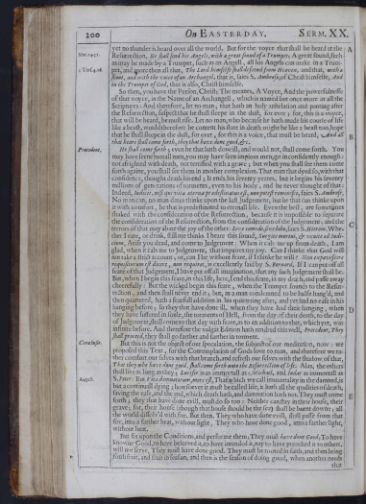 200
On Easter-day.
Serm. XX.
yet no thunder is heard over all the world.Mat. 24.31. But for the voyce that shall be heard at the
200
On Easter-day.
Serm. XX.
yet no thunder is heard over all the world.Mat. 24.31. But for the voyce that shall be heard at the
Resurrection, He shall send his Angels, with a great sound of a Trumpet; A great sound, such
as may be made by a Trumpet, such as an Angell, all his Angels can make in a Trum-
pet, and more then all that, 1 Thes. 4.16. The Lord himselfe shall descend from Heaven, and that, with a
shout, and with the voice of an Archangel, that is, saies S. Ambrose, of Christ himselfe, And
in the Trumpet of God, that is also, Christ himselfe. So then, you have the Person, Christ; The meanes, A Voyce, And the powerfulnesse
of that voyce, in the Name of an Archangell, which is named but once more in all the
Scriptures: And therefore, let no man, that hath an holy anhelation and panting after
the Resurrection, suspect that he shall sleepe in the dust, for ever; for, this is a voyce,
that will be heard, he must rise. Let no man, who because he hath made his course of life
like a beast, would therefore be content his state in death might be like a beast too, hope
that he shall sleepe in the dust, for ever, for this is a voice, that must be heard, And all
that heare shall come forth, they that have done good, &c. He shall come forth;Procedent. even he that hath done ill, and would not, shall come forth. You
may have seene morall men, you may have seen impious men, go in confidently enough:
not afrighted with death, not terrified with a grave; but when you shall see them come
forth againe, you shall see them in another complexion. That man that dyed so, with that
confidence, thought death his end; It ends his seventy yeares, but it begins his seventy
millions of generations of torments, even to his body, and he never thought of that:
Indeed, Iudicii, nisi qui vitæ æternæ prædestinatus est, non potest reminisci, saies S. Ambrose,
No man can, no man dares thinke upon the last Judgement, but he that can thinke upon
it with comfort, he that is predestinated to eternall life. Even the best, are sometimes
shaked with the consideration of the Resurrection, because it is impossible to separate
the consideration of the Resurrection, from the consideration of the Judgement; and the
terrors of that may abate the joy of the other: Sive comedo, sive bibo, saies S. Hierom, Whe-
ther I eate, or drink, still me thinks I heare this sound, Surgite mortui, & venite ad Iudi-
cium, Arise you dead, and come to Judgement: When it cals me up from death, I am
glad, when it cals me to Judgement, that impaires my joy. Can I thinke that God will
not take a strict account; or, can I be without feare, if I thinke he will? Non expavescere
requisiturum est dicere, non requiret, is excellently said by S. Bernard, If I can put off all
feare of that Judgement, I have put off all imagination, that any such Judgement shall be.
But, when I begin this feare, in this life, here, I end this feare, in my death, and passe away
cheerefully: But the wicked begin this feare, when the Trumpet sounds to the Resur-
rection, and then shall never end it; but, as a man condemned to be halfe hang'd, and
then quartered, hath a fearfull addition in his quartering after, and yet had no ease in his
hanging before; so they that have done ill, when they have had their hanging, when
they have suffered in soule, the torments of Hell, from the day of their death, to the day
of Judgement, shall come to that day with feare, as to an addition to that, which yet, was
insinite before. And therefore the vulgat Edition hath rendred this well, Procedent, They
shall proceed, they shall go farther and farther in torment. But this is not the object of our speculation, Conclusio. the subject of our meditation, now: we
proposed this Text, for the Contemplation of Gods love to man, and therefore we ra-
ther comfort our selves with that branch, and refresh our selves with the shadow of that,
That they who have done good, shall come forth unto the Resurrection of life. Alas, the others
shall live as long as they; Lucifer is as immortall as Michael, and Iudas as immortall as
S. Peter:August. But Vita damnatorum, mors est, That which we call immortality in the damned, is
but a continuall dying; howsoever it must be called life, it hath all the qualities of death,
saving the ease, and the end, which death hath, and damnation hath not. They must come
forth; they that have done evill, must do so too: Neither can stay in their house, their
grave; for, their house (though that house should be the sea) shall be burnt downe; all
the world dissolv'd with fire. But then, They who have done evill, shall passe from that
fire, into a farther heat, without light, They who have done good, into a farther light,
without heat. But fix upon the Conditions, and performe them; They must have done Good; To have
knowne Good, to have beleeved it, to have intended it, nay to have preached it to others,
will not serve, They must have done good. They must be rooted in faith, and then bring
forth fruit, and fruit in season; and then is the season of doing good, when another needs that
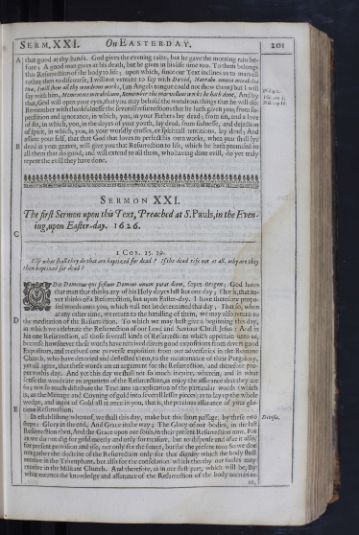 Serm. XXI.
On EasterdayEaster-day.
201
that good at thy hands. God gives the evening raine, but he gave the morning rain be-
Serm. XXI.
On EasterdayEaster-day.
201
that good at thy hands. God gives the evening raine, but he gave the morning rain be-fore; A good man gives at his death, but he gives in his life time too. To them belongs
this Resurrection of the body to life; upon which, since our Text inclines us to marvell
rather then to discourse, I will not venture to say with David, Narrabo omnia mirabilia
tua, I will shew all thy wondrous works,Psal. 9.2. (an Angels tongue could not shew them) but I will
say with him, Mementote mirabilium, Remember the marvellous works he hath done, And by Psal. 105.5.
that, God will open your eyes, that you may behold the wondrous things that he will do: Psal. 119 18119.18.
Remember with thankfulnesse the severall resurrections that he hath given you; from su-
perstition and ignorance, in which, you, in your Fathers lay dead; from sin, and a love
of sin, in which, you, in the dayes of your youth, lay dead; from sadnesse, and dejection
of spirit, in which, you, in your worldly crosses, or spirituall tentations, lay dead; And
assure your self, that that God that loves to perfect his own works, when you shall lye
dead in your graves, will give you that Resurrection to life, which he hath promised to
all them that do good, and will extend to all them, who having done evill, do yet truly
repent the evill they have done.
SERMON XXI.
The first Sermon upon this Text, Preached at S. Pauls, in the Even-
ing, upon Easter-day. 1626.
1 Cor. 15.29.
Else what shall they do that are baptized for dead? If the dead rise not at all, why are they
then baptized for dead?
O DitO dit Dominus qui festum Domini unum putat diem, sayes Origen; God hates
that man that thinks any of his Holy dayes last but one day; That is, that ne-
ver thinks of a Resurrection, but upon Easter-day. I have therefore propo-
sed words unto you, which will not be determined this day; That so, when
at any other time, we return to the handling of then, we may also return to
the meditation of the Resurrection. To which we may best give a beginning this day,
in which we celebrate the Resurrection of our Lord and Saviour Christ Jesus: And in
his one Resurrection, all those severall kinds of Resurrections which appertain unto us,
because howsoever these words have received divers good expositions from divers good
Expositors, and received one perverse exposition from our adversaries in the Romane
Church, who have detorted and deflected them, to the maintenance of their Purgatory,
yet all agree, that these words are an argument for the Resurrection, and therefore pro-
per to this day. And yet this day we shall not so much inquire, wherein, and in what
sense the words are an argument of the Resurrection, as enjoy the assurance that they are
so; not so much distribute the Text into an explication of the particular words (which
is, as the Mintage and Coyning of gold into severall lesser pieces) as to lay up the whole
wedge, and ingot of Gold all at once in you, that is, the precious assurance of your glo-
rious Resurrection. In establishing whereof, we shall this day, make but this short passage, Divisio. by these two
steps: Glory in the end, And Grace in the way; The Glory of our bodies, in the last
Resurrection then, And the Grace upon our souls, in their present Resurrection now. For
as we do not dig for gold meerly and only for treasure, but to dispense and issue it also,
for present provision and use, not only for the future, but for the present too; So we doe
not gather the doctrine of the Resurrection only for that dignity which the body shall
receive in the Triumphant, but also for the consolation which thereby our soules may
receive in the Militant Church. And therefore, as in our first part, which will be, By
what meanes the knowledge and assurance of the Resurrection of the body accrues to us,
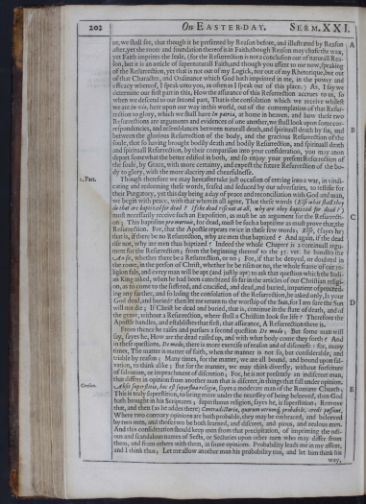 202
On Easter-day.
Serm. XXI.
us, we shall see, that though it be presented by Reason before, and illustrated by Reason
202
On Easter-day.
Serm. XXI.
us, we shall see, that though it be presented by Reason before, and illustrated by Reason
after, yet the roote and foundation thereof is in Faith; though Reason may chafe the wax,
yet Faith imprints the seale, (for the Resurrection is not a conclusion out of naturall Rea-
son, but it is an article of supernaturall Faith; and though you assent to me now, speaking
of the Resurrection, yet that is not out of my Logick, nor out of my Rhetorique, but out
of that Character, and Ordinance which God hath imprinted in me, in the power and
efficacy whereof, I speak unto you, as often as I speak out of this place.) As, I say we
determine our first part in this, How the assurance of this Resurrection accrues to us, so
when we descend to our second part, That is the consolation which we receive whilest
we are In via, here upon our way in this world, out of the contemplation of that Resur-
rection to glory, which we shall have In patria, at home in heaven, and how these two
Resurrections are arguments and evidences of one another, we shall look upon some cor-
respondencies, and resemblances between naturall death, and spirituall death by sin, and
between the glorious Resurrection of the body, and the gracious Resurrection of the
soule, that so having brought bodily death and bodily Resurrection, and spirituall death
and spirituall Resurrection, by their comparison into your consideration, you may anon
depart somewhat the better edified in both, and so enjoy your present Resurrection of
the soule, by Grace, with more certainty, and expect the future Resurrection of the bo-
dy to glory, with the more alacrity and chearfulnesse. Though therefore we may hereafter take just occasion of entring into a war, 1. Part. in vindi-
cating and redeeming these words, seased and seduced by our adversaries, to testifie for
their Purgatory, yet this day being a day of peace and reconciliation with God and man,
we begin with peace, with that wherein all agree, That these words (Else what shall they
do that are baptized for dead? If the dead rise not at all, why are they baptized for dead?)
must necessarily receive such an Exposition, as must be an argument for the Resurrecti-
on; This baptisme pro mortuis, for dead, must be such a baptisme as must prove that, the
Resurrection. For, that the Apostle repeats twice in these few words; Else, (sayes he)
that is, if there be no Resurrection, why are men thus baptized? And again, if the dead
rise not, why are men thus baptized? Indeed the whole Chapter is a continuall argu-
ment for the Resurrection; from the beginning thereof to the 35. ver. he handles the
An sit, whether there be a Resurrection, or no; For, if that be denyed, or doubted in
the roote, in the person of Christ, whether he be risen or no, the whole frame of our re-
ligion fals, and every man will be apt (and justly apt) to ask that question which the Indi-
an King asked, when he had been catechized so far in the articles of our Christian religi-
on, as to come to the suffered, and crucified, and dead, and buried, impatient of proceed-
ing any farther, and so losing the consolation of the Resurrection, he asked only, Is your
God dead, and buried? then let me return to the worship of the Sun, for I am sure the Sun
will not die; If Christ be dead and buried, that is, continue in the state of death, and of
the grave, without a Resurrection, where shall a Christian look for life? Therefore the
Apostle handles, and establishes that first, that assurance, A Resurrection there is. From thence he raises and pursues a second question De modo; But some man will
say, sayes he, How are the dead raised up, and with what body come they forth? And
in these questions, De modo, there is more exercise of reason and of discourse: for, many
times, The matter is matter of faith, when the manner is not so, but considerable, and
triable by reason; Many times, for the matter, we are all bound, and bound upon sal-
vation, to think alike; But for the manner, we may think diversly, without forfeiture
of salvation, or impeachment of discretion; For, he is not presently an indiscreet man,
that differs in opinion from another man that is discreet, in things that fall under opinion.
Gerson. Absit superstito, hoc est superflua religio, sayes a moderate man of the Romane Church;
This is truly superstition, to bring more under the necessity of being beleeved, then God
hath brought in his Scriptures; superfluous religion, sayes he, is superstition; Remove
that, and then (as he addes there) Contradictoria, quorum utrumutrumque probabile, credi possunt,
Where two contrary opinions are both probable, they may be embraced, and beleeved
by two men, and those two be both learned, and discreet, and pious, and zealous men.
And this consideration should keep men from that precipitation, of imprinting the odi-
ous and scandalous names of Sects, or Sectaries upon other men who may differ from
them, and from others with them, in some opinions. Probability leads me in my assent,
and I think thus; Let me allow another man his probability too, and let him think his way,
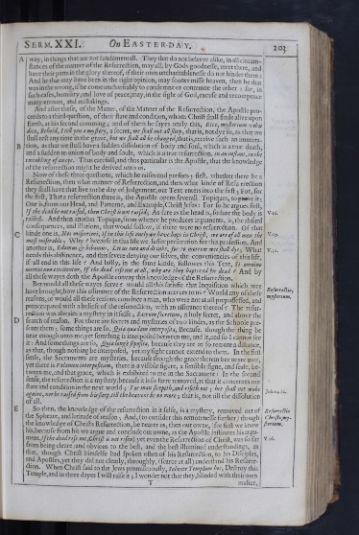 Serm. XXI.
On Easter-day.
203
way, in things that are not fundamentall. They that do not beleeve alike, in all circum-
Serm. XXI.
On Easter-day.
203
way, in things that are not fundamentall. They that do not beleeve alike, in all circum-stances of the manner of the Resurrection, may all, by Gods goodnesse, meet there, and
have their parts in the glory thereof, if their own uncharitablenesse do not hinder them:
And he that may have been in the right opinion, may sooner misse heaven, then he that
was in the wrong, if he come uncharitably to condemne or contemne the other: for, in
such cases, humility, and love of peace, may, in the sight of God, excuse and recompence
many errours, and mistakings. And after these, of the Matter, of the Manner of the Resurrection, the Apostle pro-
ceeds to a third question, of their state and condition, whom Christ shall finde alive upon
Earth, at his second comming; and of them he sayes onely this, Ecce, mysterium vobis
dico, Behold, I tell you a mystery, a secret, we shall not all sleep, that is, not dye so, as that we
shall rest any time in the grave, but we shall all be changed, that is, receive such an immuta-
tion, as that we shall have a sudden dissolution of body and soul, which is a true death,
and a sudden re-union of body and soule, which is a true resurrection, in an instant, in the
twinkling of an eye. Thus carefull, and thus particular is the Apostle, that the knowledge
of the resurrection might be derived unto us. Now of these three questions, which he raises and pursues; first, whether there be a
Resurrection, then what manner of Resurrection, and then what kinde of Resurrection
they shall have that live to the day of Judgement, our Text enters into the first; For, for
the first, That a resurrection there is, the Apostle opens severall Topiques, to prove it;
One is, from our Head, and Patterne, and Example, Christ Jesus: For so he argues first,
If the dead be not raised, then Christ is not raised; As sure as the head is, V. 16. so sure the body is
raised. And then another Topique, from whence he produces arguments, is, the absurd
consequences, and illations, that would follow, if there were no resurrection. Of that
kinde one is, Nos miserrimi, If in this life onely we have hope in Christ,V. 19. we are of all men the
most miserable; Why? because in this life we suffer persecution for this profession. And
another is, Edamus & bibamus, Let us eate and drinke, for to morrow wee shall dye;V. 32. What
needs this abstinence, and this severe denying our selves, the conveniencies of this life,
if all end in this life? And lastly, in the same kinde, followes this Text, Si omnino
mortui non excitentur, If the dead rise not at all, why are they baptized for dead? And by
all these wayes doth the Apostle convay this knowledge of the Resurrection. But would all these wayes serve?Resurrectio,
mysterium. would all this satisfie that Inquisition which wee
have brought, how this assurance of the Resurrection accrues to us? Would any of these
reasons, or would all these reasons convince a man, who were not at all prepossessed, and
preoccupated with a beliefe of the resurrection, with an assurance thereof? The resur-
rection was alwaies a mystery in it selfe; Sacrum secretum, a holy secret, and above the
search of reason. For there are secrets and mysteries of two kindes, as the Schoole pre-
sents them; some things are so, Quia quædam interposita, Because, though the thing be
near enough unto me, yet somthing is interposed between me, and it, and so I cannot see
it: And somethings are so, Quia longè seposita, because they are at so remote a distance,
as that, though nothing be interposed, yet my sight cannot extend to them. In the first
sense, the Sacraments are mysteries, because though the grace therein bee neare mee,
yet there is Velamen interpositum, there is visible figure, a sensible signe, and seale, be-
tween me, and that grace, which is exhibited to me in the Sacrament: In the second
sense, the resurrection is a mystery, because it is so farre removed, as that it concernes our
state and condition in the next world; For man sleepeth, and riseth not;Job. 14.12. hee shall not wake
againe, nor be raised from his sleep, till the heavens be no more; that is, not till the dissolution
of all. So then, the knowledge of the resurrection in it selfe, is a mystery, Resurrectio
Christi, my-
sterium. removed out of
the Spheare, and latitude of reason; And, (to consider this remotenesse farther) though
the knowledge of Christs Resurrection, be nearer us, then our owne, (for first we know
his, because from his we argue and conclude our owne, as the Apostle institutes his argu-
ment, If the dead rise not, Christ is not risen) yet even the Resurrection of Christ, V. 16. was so far
from being cleare and obvious to the best, and the best illumined understandings, as
that, though Christ himselfe had spoken often of his Resurrection, to his Disciples,
and Apostles, yet they did not clearly, throughly, (scarce at all) understand his Resurre-
ction. When Christ said to the Jews promiscuously, Solvite Templum hoc, Destroy this
Temple, and in three dayes I will raise it; I wonder not that they, blinded with their own T malice,
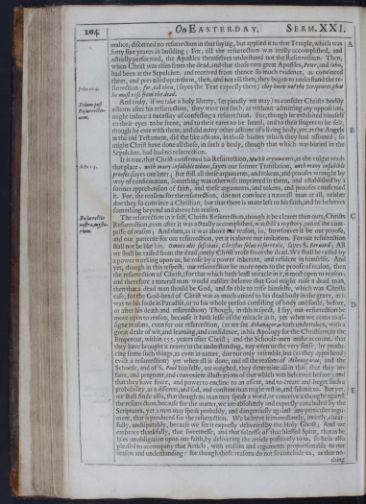 204
On Easter-day.
Serm. XXI.
malice, discerned no resurrection in that saying, but applied it to that Temple, which was
204
On Easter-day.
Serm. XXI.
malice, discerned no resurrection in that saying, but applied it to that Temple, which was
forty sixe yeares in building; For, till the resurrection was really accomplished, and
actually performed, the Apostles themselves understood not the Resurrection. Then,
when Christ was risen from the dead, and that those two great Apostles, Peter, and Iohn,
had been at the Sepulchre, and received from thence so much evidence, as convinced
them, and prevailed upon them, then, and not till then, they began to understand the re-
surrection; for,John 22.9. till then, (sayes the Text expresly there) they knew not the Scriptures, that
he must rise from the dead. And truly, Etiam post
Resurrectio-
nem. if we take a holy liberty, (as piously we may) to consider Christs bodily
actions after his resurrection, they were not such, as without admitting any opposition,
might induce a necessity of confessing a resurrection. For, though he exhibited himself
to their eyes to be seene, and to their eares to be heard, and to their fingers to be felt,
though he eate with them, and did many other actions of a living body, yet, as the Angels
in the old Testament, did the like actions, in those bodies which they had assumed; so
might Christ have done all these, in such a body, though that which was buried in the
Sepulchre, had had no resurrection. It is true, that Christ confirmed his Resurrection, Multis argumentis, as the vulgat reads
that place;Acts 1.3. with many infallible tokens, sayes our former Translation, with many infallible
proofes, sayes our later; But still all these arguments, and tokens, and proofes wrought by
way of confirmation, something was otherwise imprinted in them, and established by a
former apprehension of faith, and these arguments, and tokens, and proofes confirmed
it. For, the reasons for the resurrection, doe not convince a naturall man at all, neither
doe they so convince a Christian, but that there is more left to his faith, and he beleeves
something beyond and above his reason. The resurrection in it self, Resurrectio
nostra, myste-
rium. Christs Resurrection, though it be clearer then ours, Christs
Resurrection, even after it was actually accomplished, was still a mystery, out of the com-
passe of reason; And then, as it was above our reason, so, howsoever it be out proofe,
and our patterne for our resurrection, yet it is above our imitation. For our resurrection
shall not be like his. Omnes alii suscitati, Christus solus resurrexit, sayes S. Bernard; All
we shall be raised from the dead, onely Christ arose from the dead. We shall be raised by
a power working upon us, he rose by a power inherent, and resident in himselfe. And
yet, though in this respect, our resurrection be more open to the proofe of reason, then
the resurrection of Christ, (for that which hath least miracle in it, is most open to reason;
and therefore a naturall man would easilier beleeve that God might raise a dead man,
then that a dead man should be God, and so able to raise himselfe, which was Christs
case, for the God-head of Christ was as much united to his dead body in the grave, as it
was to his soule in Paradise, or to his whole person consisting of body and soule, before,
or after his death and resurrection) Though, in this respect, I say, our resurrection be
more open to reason, because it hath lesse of the miracle in it, yet when we come to as-
signe reasons, even for our resurrection, (as we see Athanagoras hath undertaken, with a
great deale of wit, and learning, and confidence, in his Apology for the Christians, to the
Emperour, within 155. yeares after Christ; and the Schoole-men make account, that
they have brought it nearer to the understanding, nay even to the very sense, by produ-
cing some such things, as even in nature, doe not only resemble, but (as they apprehend)
evict a resurrection) yet when all is done, and all the reasons of Athenogaras, and the
Schoole, and of S. Paul himselfe, are waighed, they determine all in this, that they are
faire, and pregnant, and convenient illustrations of that which was beleeved before; and
that they have force, and power to encline to an assent, and to create and beget such a
probability, as a discreet, and sad, and constant man might rest in, and submit to. But yet,
we shall finde also, that though no man may speak a word, or conceive a thought against
the resurrection, because for the matter, we are absolutely and expresly concluded by the
Scriptures, yet a man may speak probably, and dangerously against any particulur argu-
ment, that is produced for the resurrection. We beleeve it immediately, intirely, chea-
fully, undisputably, because we see it expresly delivered by the Holy Ghost; And we
embrace thankfully, that sweetnesse, and that fulnesse of that blessed Spirit, that as he
laies an obligation upon our faith, by delivering the article positively to us, so he is also
pleased to accompany that Article, with reasons and arguments proportionable to our
reason and understanding: for though those reasons do not so conclude us, as that no thing
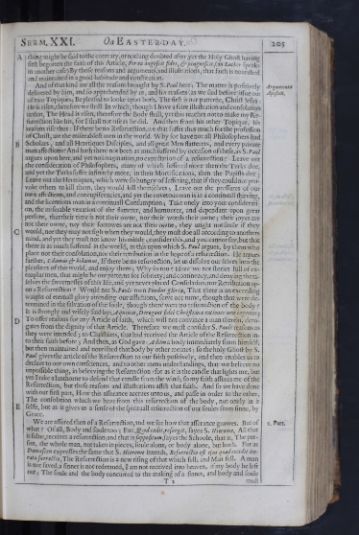 Serm. XXI.
On Easter-day.
205
thing might be said to the contrary, or nothing doubted after, yet the Holy Ghost having
Serm. XXI.
On Easter-day.
205
thing might be said to the contrary, or nothing doubted after, yet the Holy Ghost having
first begotten the faith of this Article, Per ea augescit fides, & pinguescit, (as Luther speaks
in another case) By those reasons and arguments, and illustrations, that faith is nourished
and maintained in a good habitude and constitution. And of that kind are all the reasons brought by S. Paul here;Argumenta
Apostoli. The matter is positively
delivered by him, and so apprehended by us, and his reasons (as we said before) issue out
of two Topiques; Be pleased to looke upon both. The first is our patterne, Christ Jesus:
He is risen, therefore we shall. In which, though I have a faire illustration and consolation
in that, The Head is risen, therefore the Body shall, yet this reaches not to make my Re-
surrection like his, for I shall not rise as he did. And then from his other Topique, his
reasons rise thus: If there be no Resurrection, we that suffer thus much for the prefession
of Christ, are the miserablest men in the world. Why so? have not all Philosophers had
Scholars, and all Heretiques Disciples, and all great Men flatterers, and every private
man affections? And hath there not been as much suffered by occasion of these, as S. Paul
argues upon here, and yet no imagination, no expectation of a resurrection? Leave out
the consideration of Philosophers, many of which suffered more then the Turks doe,
and yet the Turks suffer infinitely more, in their Mortifications, then the Papists doe;
Leave out the Heretiques, which were so hungry of suffering, that if they could not pro-
voke others to kill them, they would kill themselves; Leave out the pressures of our
own affections, and concupiscencies, and yet the covetous man is in a continuall starving,
and the licentious man in a continuall Consumption; Take onely into your considerati-
on, the miserable vexation of the flatterer, and humourer, and dependant upon great
persons, that their time is not their owne, nor their words their owne; their joyes are
not their owne, nay their sorrowes are not their owne; they might not smile if they
would, nor they may not sigh when they would, they must doe all according to anothers
mind, and yet they must not know his minde; consider this, and you cannot say, but that
there is as much suffered in the world, as this upon which S. Paul argues, by them who
place not their consolation, nor their retribution in the hope of a resurrection. He argues
farther, Edamus & bibamus, If there be no resurrection, let us dissolve our selves into the
pleasures of this world, and enjoy them; Why so too? Have we not stories full of ex-
emplar men, that might be our patterns for sobriety, and continency, and denying them-
selves the sweetnesses of this life, and yet never placed Consolation, nor Retribution up-
on a Resurrection? Would not S. Pauls own Pondus gloriæ That there is an exceeding
waight of eternall glory attending our afflictions, serve our turne, though that were de-
termined in the salvation of the soule, though there were no resurrection of the body?
It is strongly and wisely said by Aquinas, Derogant fidei Christianæ rationes non cogentes;
To offer reasons for any Article of faith, which will not convince a man therein, dero-
gates from the dignity of that Article. Therefore we must consider S. Pauls reasons as
they were intended; to Christians, that had received the Article of the Resurrection in-
to their faith before; And then, as God gave Adam a body immediately from himself,
but then maintained and nourished that body by other meanes; so the holy Ghost by S.
Paul gives the article of the Resurrection to our faith positively, and then enables us to
declare to our own consciences, and to other mens understandings, that we beleeve no
impossible thing, in beleeving the Resurrection: for as it is the candle that lights me, but
yet I take a lanthorne to defend that candle from the wind; so my faith assures me of the
Resurrection, but these reasons and illustrations assist that faith. And so we have done
with our first part, How this assurance accrues unto us, and passe in order to the other,
The consolation which we have from this resurrection of the body, not onely in it
selfe, but as it gives us a sense of the spirituall resurrection of our soules from sinne, by
Grace. We are assured then of a Resurrection, and we see how that assurance growes.2. Part. But of
what? Of all, Body and soule too; For, Quod cadit, resurgit, sayes S. Hierome, All that
is falne, receives a resurrection; and that is suppositum, sayes the Schoole, that is, The per-
son, the whole man, not taken in pieces, soule alone, or body alone, but both. For as
Damascen expresses the same that S. Hierome intends, Resurrectio est ejus quod cecidit ite-
rata surrectio, The Resurrection is a new rising of that which fell; and Man fell. A man
is not saved, a sinner is not redeemed, I am not received into heaven, if my body be left
out; The soule and the body concurred to the making of a sinner, and body and soule T2 must
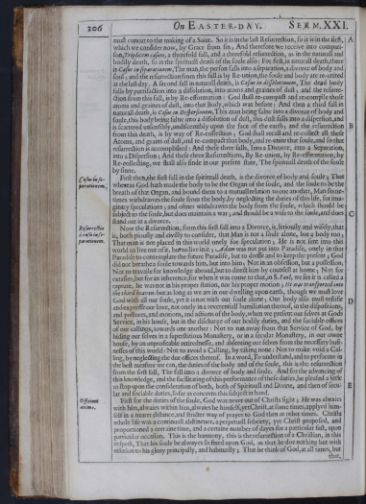 206
On Easter-day.
Serm. XXI.
must concur to the making of a Saint. So it is in the last Resurrection, so it is in the first,
206
On Easter-day.
Serm. XXI.
must concur to the making of a Saint. So it is in the last Resurrection, so it is in the first,
which we consider now, by Grace from sin; And therefore we receive into compari-
son, Triplicem casum, a threefold fall, and a threefold resurrection, as in the naturall and
bodily death, so in the spirituall death of the soule also: For first, in naturall death, there
is Casus in separationem, The man, the person falls into a separation, a divorce of body and
soul; and the resurrection from this fall is by Re-union, the soule and body are re-united
at the last day. A second fall in naturall death, is Casus in dissolutionem, The dead body
falls by putrifaction into a dissolution, into atoms and graines of dust; and the resurre-
ction from this fall, is by Re-efformation: God shall re-compact and re-compile those
atoms and graines of dust, into that Body, which was before: And then a third fall in
naturall death, is Casus in Dispersionem, This man being falne into a divorce of body and
soule, this body being falne into a dissolution of dust, this dust falls into a dispersion, and
is scattered unsensibly, undiscernibly upon the face of the earth; and the resurrection
from this death, is by way of Re-collection; God shall recall and re-collect all these
Atoms, and grains of dust, and re-compact that body, and re-unite that soule, and so that
resurrection is accomplished: And these three falls, Into a Divorce, into a Separation,
into a Dispersion; And these three Resurrections, By Re-union, by Re-efformation, by
Re-collecting, we shall also finde in our present state, The spirituall death of the soule
by sinne. First then, Casus in se-
parationem. the first fall in the spirituall death, is the divorce of body and soule; That
whereas God hath made the body to be the Organ of the soule, and the soule to be the
breath of that Organ, and bound them to a mutuall relation to one another, Man some-
times withdrawes the soule from the body, by neglecting the duties of this life, for ima-
ginary speculations; and oftner withdrawes the body from the soule, which should be
subject to the soule, but does maintain a war; and should be a wife to the soule, and does
stand out in a divorce. Now the Resurrection, Resurrectio
à casu in se-
parationem. from this first fall into a Divorce, is, seriously and wisely, that
is, both piously and civilly to consider, that Man is not a soule alone, but a body too;
That man is not placed in this world onely for speculation; He is not sent into this
world to live out of it, but to live in it; Adam was not put into Paradise, onely in that
Paradise to contemplate the future Paradise, but to dresse and to keep the present; God
did not breathe a soule towards him, but into him; Not in an obsession, but a possession;
Not to travaile for knowledge abroad, but to direct him by counsell at home; Not for
extasies, but for an inherence; for when it was come to that, in S. Paul, we see it is called a
rapture, he was not in his proper station, nor his proper motion; He was transported into
the third heaven: but as long as we are in our dwelling upon earth, though we must love
God with all our soule, yet it is not with our soule alone; Our body also must testifie
and expresse our love, not onely in a reverentiall humiliation thereof, in the dispositions,
and postures, and motions, and actions of the body, when we present our selves at Gods
Service, in his house, but in the discharge of our bodily duties, and the sociable offices
of our callings, towards one another: Not to run away from that Service of God, by
hiding our selves in a superstitious Monastery, or in a secular Monastery, in our owne
house, by an unprofitable retirednesse, and absenting our selves from the necessary busi-
nesses of this world: Not to avoid a Calling, by taking none: Not to make void a Cal-
ling, by neglecting the due offices thereof. In a word, To understand, and to performe in
the best measure we can, the duties of the body and of the soule, this is the resurrection
from the first fall, The fall into a divorce of body and soule. And for the advancing of
this knowledge, and the facilitating of this performance of these duties, be pleased a little
to stop upon the consideration of both, both of Spirituall and Divine, and then of secu-
lar and sociable duties, so far as concerns this subject in hand. First for the duties of the soule, Officium
animæ. God was never out of Christs sight; He was alwaies
with him, alwaies within him, alwaies he himself; yet Christ, at some times, applyed him-
self in a nearer distance, and stricter way of prayer to God then at other times. Christs
whole life was a continuall abstinence, a perpetuall sobriety, yet Christ proposed, and
proportioned a certaine time, and a certaine number of dayes for a particular fast, upon
particular occasion. This is the harmony, this is the resurrection of a Christian, in this
respect, That his soule be alwayes so fixed upon God, as that he doe nothing but with
relation to his glory principally, and habitually; That he think of God, at all times, but that,
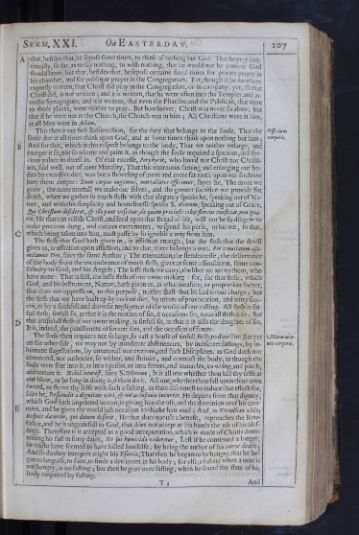 Serm. XXI.
On Easter-day.
207
that, besides that, he sepose some times, to think of nothing but God: That he pray con-
Serm. XXI.
On Easter-day.
207
that, besides that, he sepose some times, to think of nothing but God: That he pray con-tinually, so far, as to say nothing, to wish nothing, that he would not be content God
should heare, but that, besides that, he sepose certaine fixed times for private prayer in
his chamber, and for publique prayer in the Congregation. For, though it be no where
expresly written, that Christ did pray in the Congregation, or in company, yet, all that
Christ did, is not written; and it is written, that he went often into the Temples, and in-
to the Synagogues; and it is written, that even the Pharisee, and the Publican, that went
to those places, went thither to pray. But howsoever, Christ was never so alone, but
that if he were not in the Church, the Church was in him; All Christians were in him,
as all Men were in Adam. This then is our first Resurrection, for the duty that belongs to the soule, Officium
corporis. That the
soule doe at all times think upon God, and at some times think upon nothing but him;
And for that, which in this respect belongs to the body, That we neither enlarge, and
pamper it so, nor so adorne and paint it, as though the soule required a spacious, and spe-
cious palace to dwell in. Of that excesse, Porphyrie, who loved not Christ nor Christi-
ans, said well, out of meer Morality, That this enormous fatning and enlarging our bo-
dies by excessive diet, was but a shoveling of more and more fat earth upon our soules to
bury them deeper: Dum corpus augemus, mortaliores efficimur, sayes he, The more we
grow, the more mortall we make our selves, and the greater sacrifice we provide for
death, when we gather so much flesh: with that elegancy speaks he, speaking out of Na-
ture, and with this simplicity and homelinesse speaks S. Hierom, speaking out of Grace,
Qui Christum desiderat, & illo pane vescitur, de quàm preciosis cibis stercus conficiat, non quæ-
rit, He that can rellish Christ, and feed upon that Bread of life, will not be so diligent to
make precious dung, and curious excrements, to spend his purse, or his wit, in that,
which being taken into him, must passe by so ignoble a way from him. The flesh that God hath given us, is affliction enough; but the flesh that the devill
gives us, is affliction upon affliction; and to that, there belongs a woe. Per tenuitatem assi-
milamur Deo, saies the same Author; The attenuation, the slendernesse, the deliverance
of the body from the encumbrance of much flesh, gives us some assimilation, some con-
formity to God, and his Angels; The lesse flesh we carry, the liker we are to them, who
have none: That is still, the lesse flesh of our owne making: for, for that flesh, which
God, and his instrument, Nature, hath given us, in what measure, or proportion soever,
that does not oppresse us, to this purpose, neither shall that be laid to our charge; but
the flesh that we have built up by curious diet, by meats of provocation, and witty saw-
ces, or by a slothfull and drowsie negligence of the works of our calling. All flesh is sin-
full flesh; sinfull so, as that it is the mother of sin, it occasions sin, naturall flesh is so; But
this artificiall flesh of our owne making, is sinfull so, as that it is also the daughter of sin;
It is, indeed, the punishment of former sins, and the occasion of future. The soule then requires not so large, so vast a house of sinfull flesh, to dwell in:Maceratio-
nes corporis. But yet
on the other side, we may not by inordinate abstinencies, by indiscreet fastings, by in-
humane flagellations, by unnaturall macerations, and such Disciplines, as God doth not
command, nor authorize, so wither, and shrinke, and contract the body, as though the
soule were sent into it, as into a prison, or into fetters, and manacles, to wring, and pinch,
and torture it. Nihil interest, saies S. Hierome, It is all one whether thou kill thy selfe at
one blow, or be long in doing it, if thou do it. All one, whether thou fall upon thine own
sword, or sterve thy selfe with such a fasting, as thou discernest to induce that effect: for,
saies he, Descendit a dignitate viri, & not as insaniæ incurrit. He departs from that dignity,
which God hath imprinted in man, in giving him the use, and the dominion over his crea-
tures, and he gives the world just occasion to thinke him mad; And, as Tertullian adds;
Respuit datorem, qui datum deserit, He that does not use a benefit, reproaches the Bene-
factor, and he is ungratefull to God, that does not accept at his hands the use of his bles-
sings. Therefore is it accepted as a good interpretation, which is made of Christs deter-
mining his fast in forty daies, Ne sui homicida videretur, Lest if he continued it longer,
he might have seemed to have killed himselfe, by being the author of his owne death;
And so do they interpret aright his Esuriit, That then he began to be hungry, that he be-
gan to languish, to faint, to finde a detriment in his body; for else, a fasting when a man is
not hungry, is no fasting; but then he gave over fasting, when he found the state of his
body empaired by fasting. T3 And
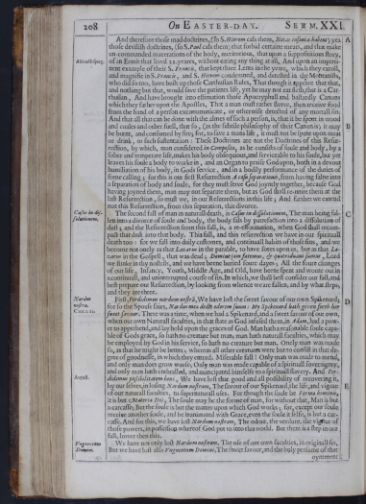 208
On Easter-day.
Serm. XXI.
And therefore those mad doctrines, (so S. Hierom cals them, Notas insaniæ habent yea
208
On Easter-day.
Serm. XXI.
And therefore those mad doctrines, (so S. Hierom cals them, Notas insaniæ habent yea
those devilish doctrines, (so S. Paul cals them) that forbid certaine meats, and that make
un-commanded macerations of the body, meritorious, that upon a supposititious story,
of an Ermit that lived 22. yeares, Abbas Ursperg. without eating any thing at all, And upon an imperti-
nent example of their S. Francis, that kept three Lents in the yeare, which they extoll,
and magnifie in S. Francis, and S. Hierom condemned, and detested in the Montanists,
who did so too, have built up those Carthusian Rules, That though it appeare that that,
and nothing but that, would save the patients life, yet he may not eat flesh, that is a Car-
thusian, And have brought into estimation those Apocryphall and bastardly Canons
which they father upon the Apostles, That a man must rather sterve, then receive food
from the hand of a person excommunicate, or otherwise detected of any mortall sin;
And that all that can be done with the almes of such a person, is, that it be spent in wood
and coales and other fuell, that so, (as the subtile philosophy of their Canon is) it may
be burnt, and consumed by fire; for, to save a mans life, it must not be spent upon meat
or drink, or such sustentation: These Doctrines are not the Doctrines of this Resur-
rection, by which, man considered in Composito, as he consists of soule and body, by a
sober and temperate life, makes his body obsequious, and serviceable to his soule, but yet
leaves his soule a body to worke in, and an Organ to praise God upon, both in a devout
humiliation of his body, in Gods service, and in a bodily performance of the duties of
some calling; for this is our first Resurrection A casu separationis, from having falne into
a separation of body and soule, for they must serve God joyntly together, because God
having joyned them, man may not separate them, but as God shall re-unite them at the
last Resurrection, so must we, in our Resurrections in this life; And farther we extend
not this Resurrection, from this separation, this divorce. The second fall of man in naturall death, Casus in dis-
solutionem. is Casus in dissolutionem, The man being fal-
len into a divorce of soule and body, the body fals by putrefaction into a dissolution of
dust; and the Resurrection from this fall, is, a re-efformation, when God shall recom-
pact that dust into that body. This fall, and this resurrection we have in our spirituall
death too: for we fall into daily customes, and continuall habits of those sins, and we
become not onely as that Lazarus in the parable, to have sores upon us, but as that La-
zarus in the Gospell, that was dead; Domine jam fætemus, & quatriduani sumus, Lord
we stinke in thy nostrils, and we have beene buried foure dayes; All the foure changes
of our life, Infancy, Youth, Middle Age, and Old, have beene spent and worne out in
a continuall, and uninterrupted course of sin. In which, we shall best consider our fall, and
best prepare our Resurrection, by looking from whence we are fallen, and by what steps;
and they are three. First, Nardus
nostra.
Cant. 1.12. Perdidimus nardum nostrā, We have lost the sweet savour of our own Spikenard;
for so the Spouse saies, Nardus mea dedit odorem suum: My Spikenard hath given forth her
sweet savour. There was a time, when we had a Spikenard, and a sweet savour of our own,
when our own Naturall faculties, in that state as God infused them, in Adam, had a pow-
er to apprehend, and lay hold upon the graces of God. Man hath a reasonable soule capa-
ble of Gods grace, so hath no creature but man; man hath naturall faculties, which may
be employed by God in his service, so hath no creature but man. Onely man was made
so, as that he might be better; whereas all other creatures were but to consist in that de-
gree of goodnesse, in which they entred. Miserable fall! Only man was made to mend,
and only man does grow worse; Only man was made capable of a spirituall soveraignty,
and only man hath enthralled, and mancipated himselfe to a spirituall slavery. And Per-
didimus possibilitatem boni,August. We have lost that good and all possibility of recovering it,
by our selves, in losing Nardum nostram, The savour of our Spikenard, the life, and vigour
of our naturall faculties, to supernaturall uses. For though the soule be Forma hominis,
it is but Materia Dei; The soule may be the forme of man, for without that, Man is but
a carcasse; But the soule is but the matter upon which God works; for, except our soule
receive another soule, and be inanimated with Grace, even the soule it selfe, is but a car-
casse. And for this, we have lost Nardum nostram, The odour, the verdure, the vigour of
those powers, in possession whereof God put us into this world. But there is a step in our
fall, lower then this. We have not only lost Nardum nostram, Vnguentum
Domini. The use of our own faculties, in originall sin,
But we have lost also Vnguentum Domini, The sweet savour, and the holy perfume of that oyntment
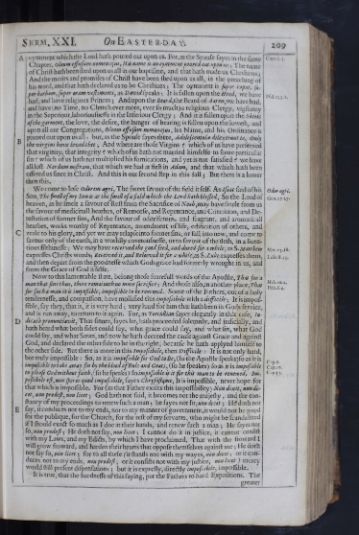 Serm. XXI.
On Easter-day.
209
oyntment which the Lord hath poured out upon us. For, Cant. 1.3. as the Spouse sayes in the same
Serm. XXI.
On Easter-day.
209
oyntment which the Lord hath poured out upon us. For, Cant. 1.3. as the Spouse sayes in the same
Chapter, Oleum effusum nomen ejus, His name is an oyntment poured out upon us; The name
of Christ hath been shed upon us all in our baptisme, and that hath made us Christians;
And the merits and promises of Christ have been shed upon us all, in the preaching of
his word, and that hath declared us to be Christians; The oyntment is super caput, su-
per barbam, super oram vestimenti, as David speaks; It is fallen upon the Head, Psal. 133.2. we have
had, and have religious Princes; And upon the Beard, the Beard of Aaron, we have had,
and have (no Time, no Church ever more, ever so much) a religious Clergy, vigilancy
in the Superiour, laboriousnesse in the Inferiour Clergy; And it is fallen upon the Skirts
of the garment, the love, the desire, the hunger of hearing is fallen upon the lowest, and
upon all our Congregations, Oleum effusum nomen ejus, his Name, and his Ordinance is
poured out upon us all; but, as the Spouse sayes there, Adolescentulæ dilexerunt te, Only
the virgins have loved thee; And where are those Virgins? which of us have preserved
that virginity, that integrity? which of us hath not married himselfe to some particular
sin? which of us hath not multiplied his fornications, and yet is not satisfied? we have
all lost Nardum nostram, that which we had at first in Adam, and that which hath been
offered us since in Christ. And this is our second step in this fall; But there is a lower
then this.
We come to lose Odorem agri, The sweet savour of the field it self.Odor agri.
Gen. 27.27. As Isaac said of his
Son, The smell of my Son is as the smell of a field which the Lord hath blessed, So the Lord of
heaven, as he smelt a savour of Rest from the Sacrifice of Noah, may have smelt from us
the savour of medicinall hearbes, of Remorse, and Repentance, and Contrition, and De-
testation of former sins, And the savour of odoriferous, and fragrant, and aromaticall
hearbes, works worthy of Repentance, amendment of life, edification of others, and
zeale to his glory, and yet we may relapse into former sins, or fall into new, and come to
savour only of the earth, in a worldly covetousnesse, or to savour of the flesh, in a licen-
tious filthinesse; We may have received the good seed, and dured for a while, as S. Matthew Mat. 13.18.
expresses Christs words; Received it, and Beleeved it for a while, as S. Luke expresses them, Luke 8.13.
and then depart from the goodnesse which Gods grace had formerly wrought in us, and
from the Grace of God it selfe.
Now to this lamentable state, belong those fearefull words of the Apostle, That for a
man that sins thus, there remaineth no more sacrifice; And those also, in another place, Heb. 10.2. That
for such a man it is impossible, impossible to be renewed. Some of the Fathers, out of a holy Heb. 6.4.
tendernesse, and compassion, have mollified this impossibile with a difficile; It is impos-
sible, say they, that is, it is very hard; very hard for him that hath been in Gods service,
and is run away, to return to it again. For, as Tertullian sayes elegantly in that case, Iu-
dicatò pronunciavit, That sinner, sayes he, hath proceeded solemnly, and judicially, and
hath heard what both sides could say, what grace could say, and what sin, what God
could say, and what Satan, and now he hath decreed the cause against Grace and against
God, and declared the other side to be in the right, because he hath applyed himself to
the other side. But there is more in this Impossibile, then Difficile: It is not only hard,
but truly impossible: So, as it is impossible for God to lie, (so the Apostle speaks) so as it is Cap. 6.
impossible to take away sin by the blood of Buls and Goats, (so he speakes) so as it is Cap. 10. impossible
to please God without faith, (so he speaks) so impossible is it for this man to be renewed.Cap. 11. Im-
possibile est, non speres quod impossibile, sayes Chrysostome, It is impossible, never hope for
that which is impossible. For (as that Father exalts this impossibility) Non dixit, non de-
cet, non prodest, non licet; God hath not said, it becomes not the majesty, and the con-
stancy of my proceedings to renew such a man; he sayes not so, non decet; He doth not
say, it conduces not to my ends, nor to my manner of government, it would not be good
for the publique, for the Church, for the rest of my servants, who might be scandalized
if I should exact so much as I doe at their hands, and renew such a man; He sayes not
so, non prodest; He doth not say, non licet; I cannot do it in justice, it cannot consist
with my Laws, and my Edicts, by which I have proclaimed, That with the froward I
will grow froward, and harden their hearts that oppose themselves against me; He doth
not say so, non licet; for to all these (it stands not with my wayes, non decet; or it con-
duces not to my ends, non prodest; or it consists not with my justice, non licet) mercy
would still present dispensations; but it is expresly, directly impossibile, impossible.
It is true, that the hardnesse of this saying, put the Fathers to hard Expositions. The greater
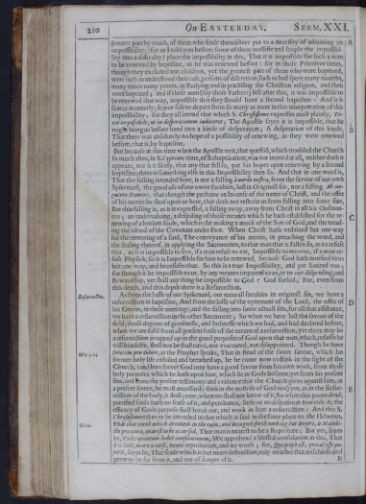 210
On Easter-day.
Serm. XXI.
greater part by much, of them who finde themselves put to a necessity of admitting an
210
On Easter-day.
Serm. XXI.
greater part by much, of them who finde themselves put to a necessity of admitting an
impossibility, (for as I told you before, some of them mollifie and souple the impossibi-
lity into a difficulty) place the impossibility in this, That it is impossible for such a man
to be renewed by baptisme, as he was renewed before: for in those Primitive times,
though they excluded not children, yet the greatest part of them who were baptized,
were such as understood their case, persons of discretion, such as had spent many months,
many times many yeares, in studying and in practising the Christian religion, and then
were baptized; and if these men (say those Fathers) fell after this, it was impossible to
be renewed that way, impossible that they should have a second baptisme: And it is
scarce mannerly, scarce safe to depart from so many as meet in this interpretation of this
impossibility; for they all intend that which S. Chrysostome expresses most plainly, Di-
xit impossibile, ut in desperationem induceret; The Apostle sayes it is impossible, that he
might bring us before hand into a kinde of desperation; A desperation of this kinde,
That there was absolutely no hope of a possibility of renewing, as they were renewed
before, that is, by baptisme. But because at this time when the Apostle writ, that questiō, which troubled the Church
so much after, in S. Cyprians time, of Rebaptization, was not moved at all, neither doth it
appeare, nor is it likely, that any that fell so, put his hopes upon renewing by a second
baptisme; there is something else in this Impossibility then so. And that in one word is,
That the falling intended here, is not a falling à nardo nostra, from the savour of our own
Spikenard, the good use of our owne faculties, lost in Originall sin, nor a falling Ab un-
guento Domini, that though the perfume an Incense of the name of Christ, and the offer
of his merits be shed upon us here, that doth not restrain us from falling into some sins,
But this falling is, as it is expressed, a falling away, away from Christ in all his Ordinan-
ces; an undervaluing, a despising of those meanes which he hath established for the re-
newing of a broken soule, which is the making a mock of the Son of God, and the tread-
ing the blood of the Covenant under foot. When Christ hath ordained but one way
for the renewing of a soul, The conveyance of his merits, in preaching the word, and
the sealing thereof, in applying the Sacraments, to that man that is fallen so, as to refuse
that, as it is impossible to live, if a man refuse to eat, Impossible to recover, if a man re-
fuse Physick, so it is Impossible for him to be renewed, because God hath notified to us
but one way, and he refuses that. So this is a true Impossibility, and yet limited too;
for though it be impossible to us, by any meanes imparted to us, or to our dispensing, and
stewardship, yet shall any thing be impossible to God? God forbid; For, even from
this death, and this depth there is a Resurrection. As from the losse of our Spikenard, Resurrectio. our naturall faculties in originall sin, we have a
resurrection in baptisme, And from the losse of the oyntment of the Lord, the offer of
his Graces, in these meetings, and the falling into some actuall sins, for all that assistance,
we have a resurrection in the other Sacrament; So when we have lost the savour of the
field, those degrees of goodnesse, and holinesse which we had, and had declared before,
when we are fallē from all present sense of the means of a resurrection, yet there may be
a resurrection wrapped up in the good purposes of God upon that man, which, unlesse he
will himselfe, shall not be frustrated, not evacuated, not disappointed. Though he have
fœtorem pro Odore,Esay 3.24. as the Prophet speaks, That in stead of the sweet savour, which his
former holy life exhaled and breathed up, he be come now to stink in the sight of the
Church, (and howsoever God may have a good savour from his own work, from those
holy purposes which he hath upon him, which lie in Gods bosome, yet from his present
sins, and from the present testimony and evidence that the Church gives against him, as
a present sinner, he must necessarily stink in the nostrils of God too) yet, as in the Resur-
rection of the body, it shall come, when we shall not know of it, So when this poore dead,
putrified soule hath no sense of it, and perchance, little or no disposition towards it, the
efficacy of Gods purpose shall break out, and work in him a resurrection: And this S.
Chrysostome takes to be intended in that which is said in the same place to the Hebrews,
That that earth which drinketh in the rain, Heb. 6. and bringeth forth nothing but Bryers, is Maledi-
cto proxima, nearest to be accursed, That man is nearest to be a Reprobate; But yet, sayes
he, Vides quantam habet consolationem, We apprehend a blessed consolation in this, That
it is said, neare a curse, neare reprobation, and no worse; for, Qui propè est, procul esse po-
tcrit, sayes he, That soule which is but neare destruction, may weather that mischiefe, and
grow to be far from it, and out of danger of it. It
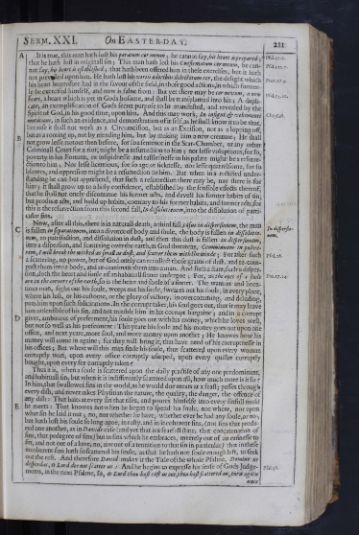 Serm. XXI.
On Easter-day.
211
It is true, this man hath lost his paratum cor meum; he cannot say, Psal. 57.7. his heart is prepared;
Serm. XXI.
On Easter-day.
211
It is true, this man hath lost his paratum cor meum; he cannot say, Psal. 57.7. his heart is prepared;
that he hath lost in originall sin; This man hath lost his Confirmatum cor meum, Psal. 112.7. he can-
not say, his heart is established; that hath been offered him in these exercises, but it hath
not prevailed upon him. He hath lost his variis odoribus delectatum cor, Prov. 27.9. the delight which
his heart heretofore had in the savour of the field, in those good actions, in which former-
ly he exercised himself, and now is falne from: But yet there may be cor novum,Psal. 51.10. a new
heart, a heart which is yet in Gods bosome, and shall be transplanted into his; A dupli-
cate, an exemplification of Gods secret purpose to be manifested, and revealed by the
Spirit of God, in his good time, upon him. And this may work, Chrysost. In insigni & vehementi
mutatione, in such an evidence, and demonstration of it self, as he shall know it to be that,
because it shall not work as a Circumcision, but as an Excision, not as a lopping off,
but as a rooting up, not by mending him, but by making him a new creature; He shall
not grow lesse riotous then before, for so a sentence in the Star-Chamber, or any other
Criminall Court for a riot, might be a resurrection to him; nor lesse voluptuous, for so,
poverty in his Fortune, or insipidnesse and tastlesnesse in his palate might be a resurre-
ction to him; Nor lesse licentious, for so age or sicknesse, nor lesse quarrelsome, for so
blowes, and oppression might be a resurrection to him. But when in a rectified under-
standing he can but apprehend, that such a resurrection there may be, nay there is for
him; it shall grow up to a holy confidence, established by the sensible effects thereof,
that he shall not onely discontinue his former acts, and devest his former habits of sin,
but produce acts, and build up habits, contrary to his former habits, and former acts, for
this is the resurrection from this second fall, In dissolutionem, into the dissolution of parti-
cular sins. Now, after all this, there is in naturall death, a third fall, casus in dispersionem, In dispersio-
nem. the man
is fallen in separationem, into a divorce of body and soule, the body is fallen in dissolutio-
nem, to putrifaction, and dissolution in dust, and then this dust is fallen in dispersionem,
into a dispersion, and scattering over the earth, as God threatens, Comminuam in pulve-
rem, I will break the wicked as small as dust, and scatter them with the winde;Psal. 18. For after such
a scattering, no power, but of God onely can recollect those grains of dust, and re-com-
pact them into a body, and re-inanimate them into a man. And such a state, such a disper-
sion, doth the heart and soule of an habituall sinner undergoe; For, Pro. 17.24. as the eyes of a foole
are in the corners of the earth, so is the heart and soule of a sinner. The wanton and licen-
tious man, sighs out his soule, weeps out his soule, sweares out his soule, in every place,
where his lust, or his custome, or the glory of victory, in overcomming, and deluding,
puts him upon such solicitations. In the corrupt taker, his soul goes out, that it may leave
him unsensible of his sin, and not trouble him in his corrupt bargaine; and in a corrupt
giver, ambitious of preferment, his soule goes out with his money, which he loves well,
but not so well as his preferment: This yeare his soule and his money goes out upon one
office, and next yeare, more soul, and more money upon another; He knowes how his
money will come in againe; for they will bring it, that have need of his corruptnesse in
his offices; But where will this man finde his soule, thus scattered upon every woman
corruptly won, upon every office corruptly usurped, upon every quillet corruptly
bought, upon every fee corruptly taken? Thus it is, when a soule is scattered upon the daily practise of any one predominant,
and habituall sin; but when it is indifferently scattered upon all, how much more is it so?
In him, that swallowes sins in the world, as he would doe meats at a feast; passes through
every dish, and never askes Physitian the nature, the quality, the danger, the offence of
any dish: That baits at every sin that rises, and poures himselfe into every sinfull mold
he meets: That knowes not when he began to spend his soule, nor where, nor upon
what sin he laid it out; no, nor whether he have, whether ever he had any soule, or no;
but hath lost his soule so long agoe, in rusty, and in incoherent sins, (not sins that produ-
ced one another, as in Davids case (and yet that is a fearfull state, that concatenation of
sins, that pedegree of sins) but in sins which he embraces, meerely out of an easinesse to
sin, and not out of a love, no, nor out of a tentation to that sin in particular) that in these
incoherent sins hath so scattered his soule, as that he hath not soule enough left, to seek
out the rest. And therefore David makes it the Title of the whole Psalme, Domine ne
disperdas, O Lord doe not scatter us:Psal. 58. And he begins to expresse his sense of Gods Judge-
ments, in the next Psalme, so, O Lord thou hast cast us out, thou hast scattered us, turn again unto
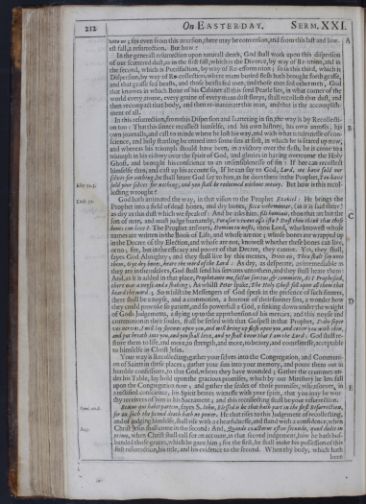 212
On Easter-day.
Serm. XXI.
unto us; for even from this aversion, there may be conversion, and from this last and low-
212
On Easter-day.
Serm. XXI.
unto us; for even from this aversion, there may be conversion, and from this last and low-est fall, a resurrection. But how? In the generall resurrection upon naturall death, God shall work upon this dispersion
of our scattered dust, as in the first fall, which is the Divorce, by way of Re-union, and in
the second, which is Putrifaction, by way of Re-efformation; so in this third, which is
Dispersion, by way of Re-collection; where mans buried flesh hath brought forth grasse,
and that grasse fed beasts, and those beasts fed men, and those men fed other men, God
that knowes in which Boxe of his Cabinet all this seed Pearle lies, in what corner of the
world every atome, every graine of every mans dust sleeps, shall recollect that dust, and
then recompact that body, and then re-inanimate that man, and that is the accomplish-
ment of all. In this resurrection, from this Dispersion and scattering in sin, the way is by Recollecti-
on too: That this sinner recollect himselfe, and his own history, his own annalls, his
own journalls, and call to minde where he lost his way, and with what tendernesse of con-
science, and holy startling he entred into some sins at first, in which he is seared up now,
and whereas his triumph should have been, in a victory over the flesh, he is come to a
triumph in his victory over the spirit of God, and glories in having overcome the Holy
Ghost, and brought his conscience to an unsensiblenesse of sin: If hee can recollect
himselfe thus, and cast up his account so, If he can say to God, Lord, we have sold our
selves for nothing, he shall heare God say to him, as he does there in the Prophet, You have
sold your selves for nothing,Esay 52.3. and you shall be redeemed without money. But how is this recol-
lecting wrought? God hath intimated the way, Ezek. 37. in that vision to the Prophet Ezekiel: He brings the
Prophet into a field of dead bones, and dry bones, sicca vehementer, (as it is said there)
as dry as this dust which we speak of: And he asks him, fili hominis, thou that art but the
son of man, and must judge humanely, Putasne vivent ossa ista? Dost thou think that these
bones can live? The Prophet answers, Domine tu nosti, thou Lord, who knowest whose
names are written in the Book of Life, and whose are not; whose bones are wrapped up
in the Decree of thy Election, and whose are not, knowest whether these bones can live,
or no; for, but in the efficacy and power of that Decree, they cannot. Yes, they shall,
sayes God Almighty; and they shall live by this meanes, Dices eis, Thou shalt say unto
them, O ye dry bones, heare the word of the Lord: As dry, as desperate, as irremediable as
they are in themselves, God shall send his servants unto them, and they shall heare them:
And, as it is added in that place, Prophetante me, factus sonitus, & commotio, As I Prophesied,
there was a noyse and a shaking; As whilst Peter spake, The Holy Ghost fell upon all them that
heard the word; So whilst the Messengers of God speak in the presence of such sinners,
there shall be a noyse, and a commotion, a horrour of their former sins, a wonder how
they could provoke so patient, and so powerfull a God, a sinking down under the waight
of Gods Judgements, a flying up to the apprehension of his mercies, and this noyse and
commotion in their soules, shall be setled with that Gospell in that Prophet, Dabo super
vos nervos, I will lay sinewes upon you, and will bring up flesh upon you, and cover you with skin,
and put breath into you, and you shall live, and ye shall know that I am the Lord; God shall re-
store them to life, and more, to strength, and more, to beauty, and comelinesse, acceptable
to himselfe in Christ Jesus. Your way is Recollecting; gather your selves into the Congregation, and Communi-
on of Saints in these places; gather your sins into your memory, and poure them out in
humble confessions, to that God, whom they have wounded; Gather the crummes un-
der his Table, lay hold upon the gracious promises, which by our Ministery he lets fall
upon the Congregation now; and gather the seales of those promises, whensoever, in
a rectified conscience, his Spirit beares witnesse with your spirit, that you may be wor-
thy receivers of him in his Sacrament; and this recollecting shall be your resurrection. Beatus qui habet partem, Apoc. 20.6 sayes S. Iohn, Blessed is he that hath part in the first Resurrection,
for on such the second death hath no power. He that rises to this Judgement of recollecting,
and of judging himselfe, shall rise with a chearfulnesse, and stand with a confidence, when
Christ Jesus shall come in the second:Aug. And, Quando exacturus est in secundo, quod dedit in
primo, when Christ shall call for an account, in that second judgement, how he hath hus-
banded those graces, which he gave him; for the first, he shall make his possession of this
first resurrection, his title, and his evidence to the second. When thy body, which hath been
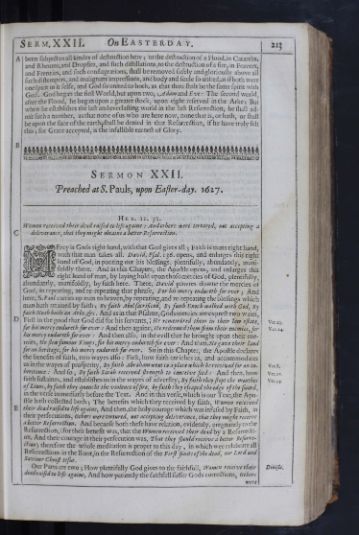 Serm. XXII.
On Easter-day.
213
been subject to all kindes of destruction here; to the destruction of a Flood, in Catarrhs,
Serm. XXII.
On Easter-day.
213
been subject to all kindes of destruction here; to the destruction of a Flood, in Catarrhs,
and Rheums, and Dropsies, and such distillations, to the destruction of a fire, in Feavers,
and Frenzies, and such conflagrations, shall be removed safely and gloriously above all
such distempers, and malignant impressions, and body and soule so united, as if both were
one spirit in it selfe, and God so united to both, as that thou shalt be the same spirit with
God. God began the first World, but upon two, Adam and Eve: The second world,
after the Flood, he began upon a greater stock, upon eight reserved in the Arke; But
when he establishes the last and everlasting world in the last Resurrection, he shall ad-
mit such a number, as that none of us who are here now, none that is, or hath, or shall
be upon the face of the earth, shall be denied in that Resurrection, if he have truly felt
this; for Grace accepted, is the infallible earnest of Glory.
SERMON XXII.
Preached at S. Pauls, upon Easter-day. 1627.
Heb. 11.35.
Women received their dead raised to life againe: And others were tortured, not accepting a
deliverance, that they might obtaine a better Resurrection.
MErcy is Gods right hand, with that God gives all; Faith is mans right hand,
with that man takes all. David, Psal. 136. opens, and enlarges this right
hand of God, in pouring out his blessings, plentifully, abundantly, mani-
foldly there. And in this Chapter, the Apostle opens, and enlarges this
right hand of man, by laying hold upon those mercies of God, plentifully,
abundantly, manifoldly, by faith here. There, David powres downe the mercies. of
God, in repeating, and re-repeating that phrase, For his mercy endureth for ever; And
here, S. Paul carries up man to heaven, by repeating, and re-repeating the blessings which
man hath attained by faith; By faith Abel sacrificed, By faith Enoch walked with God, By
faith Noah built an Arke, &c. And as in that Psalme, Gods mercies are exprest two waies,
First in the good that God did for his servants, He remembred them in their low estate,
Ver 23.
Ver. 24. for his mercy endureth for ever: And then againe, He redeemed them from their enemies, for
his mercy endureth for ever: And then also, in the evill that he brought upon their ene-
mies, He slew famous Kings, for his mercy endureth for ever: And then, He gave their land
for an heritage, for his mercy endureth for ever. So in this Chapter, the Apostle declares
the benefits of faith, two wayes also: First, how faith enriches us, and accommodates
us in the wayes of prosperity, By faith Abraham went to a place which he received for an in-
heritance: And so, By faith Sarah received strength to conceive seed:Ver. 8.
Ver. 11.
Ver. 34. And then, how
faith sustaines, and establishes us in the wayes of adversity, By faith they stopt the mouthes
of Lions, by faith they quencht the violence of fire, by faith they escaped the edge of the sword,
in the verse immediatly before the Text. And in this verse, which is our Text, the Apo-
stle hath collected both; The benefits which they received by faith, Women received
their dead raised to life againe, And then, the holy courage which was infused by Faith, in
their persecutions, Others were tortured, not accepting deliverance, that they might receive
a better Resurrection. And because both these have relation, evidently, pregnantly to the
Resurrection, (for their benefit was, that the Women received their dead by a Resurrecti-
on, And their courage in their persecution was, That they should receive a better Resurre-
ction) therefore the whole meditation is proper to this day, in which wee celebrate all
Resurrections in the Root, in the Resurrection of the First fruits of the dead, our Lord and
Saviour Christ Iesus.
Our Parts are two; How plentifully God gives to the faithfull, Divisio. Women receive their
dead raised to life againe, And how patiently the faithfull suffer Gods corrections, Others were
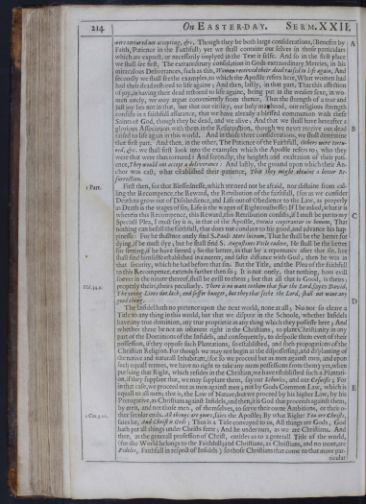 214
On Easter-day.
Serm. XXII.
were tortured not accepting, &c. Though they be both large considerations, (Benefits by
214
On Easter-day.
Serm. XXII.
were tortured not accepting, &c. Though they be both large considerations, (Benefits by
Faith, Patience in the Faithfull) yet we shall containe our selves in those particulars
which are exprest, or necessarily implyed in the Text it selfe. And so in the first place
we shall see first, The extraordinary consolation in Gods extraordinary Mercies, in his
miraculous Deliverances, such as this, Women received their dead raised to life again, And
secondly we shall seethe examples, to which the Apostle refers here, What women had
had their dead restored to life againe; And then, lastly, in that part, That this affection
of joy, in having their dead restored to life againe, being put in the weaker sexe, in wo-
men onely, we may argue conveniently from thence, That the strength of a true and
just joy lies not in that, but that our virility, our holy manhood, our religious strength
consists in a faithfull assurance, that we have already a blessed communion with these
Saints of God, though they be dead, and we alive; And that we shall have hereafter a
glorious Association with them in the Resurrection, though we never receive our dead
raised to life again in this world. And in those three considerations, we shall determine
that first part. And then, in the other, The Patience of the Faithfull, Others were tortu-
red, &c. we shall first look into the examples which the Apostle refers to; who they
were that were thus tortured: And secondly, the heighth and exaltation of their pati-
ence, They would not accept a deliverance: And lastly, the ground upon which their An-
chor was cast, what established their patience, That they might obtaine a better Re-
surrection.
First then, 1 Part. for that Blessednesse, which we need not be afraid, nor abstaine from cal-
ling the Recompence, the Reward, the Retribution of the faithfull, (for as we consider
Death to grow out of Disobedience, and Life out of Obedience to the Law, as properly
as Death is the wages of sin, Life is the wages of Righteousnesse) If I be asked, what it is
wherein this Recompence, this Reward, this Retribution consists, if I must be put to my
Speciall Plea, I must say it is, in that of the Apostle, Omnia cooperantur in bonum, That
nothing can befall the faithfull, that does not conduce to his good, and advance his hap-
pinesse: For he shall not onely find S. Pauls Mori lucrum, That he shall be the better for
dying, if he must dye; but he shall find S. Augustines Vtile cadere, He shall be the better
for sinning, if he have sinned; So the better, as that by a repentance after that sin, hee
shall find himselfe established in a neerer, and safer distance with God, then he was in
that security, which he had before that sin. But the Title, and the Plea of the faithfull
to this Recompence, extends farther then so; It is not onely, that nothing, how evill
soever in the nature thereof, shall be evill to them; but that all that is Good, is theirs;
properly theirs, Psal. 34.9. theirs peculiarly. There is no want to them that fear the Lord, sayes David;
The young Lions doe lack, and suffer hunger, but they that seeke the Lord, shall not want any
good thing.
The Infidel hath no pretence upon the next world, none at all; No nor so cleare a
Title to any thing in this world, but that we dispute in the Schoole, whether Infidels
have any true dominion, any true proprietie in any thing which they possesse here; And
whether there be not an inherent right in the Christians, to plant Christianity in any
part of the Dominions of the Infidels, and consequently, to despoile them even of their
possession, if they oppose such Plantations, so established, and such propagations of the
Christian Religion. For though we may not begin at the dispossessing, and displanting of
the native and naturall Inhabitant, (for so we proceed but as men against men, and upon
such equall termes, we have no right to take any mens possessions from them) yet, when
pursuing that Right, which resides in the Christian, we have established such a Plantati-
on, if they supplant that, we may supplant them, say our Schooles, and our Casuists; For
in that case, we proceed not as men against men; not by Gods Common Law, which is
equall to all men; that is, the Law of Nature; but we proceed by his higher Law, by his
Prerogative, as Christians against Infidels, and then, it is God that proceeds against them,
by men, and not those men, of themselves, to serve their owne Ambitions, or their o-
ther secular ends.1 Cor. 3.20. All things are yours, saies the Apostle; By what Right? You are Christs,
saies he, And Christ is Gods; Thus is a Title convayed to us, All things are Gods, God
hath put all things under Christs feete; And he under ours, as we are Christians. And
then, as the generall profession of Christ, entitles us to a generall Title of the world,
(for the World belongs to the Faithfull; and Christians, as Christians, and no more, are
Fideles, Faithfull in respect of Infidels) so those Christians that come to that more par-
ticular
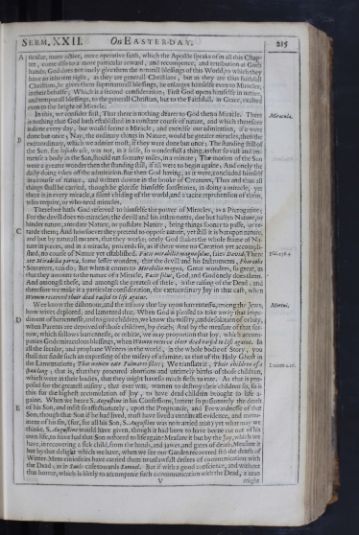 Serm. XXII.
On Easter-day.
215
ticular, more active, more operative faith, which the Apostle speaks of in all this Chap-
Serm. XXII.
On Easter-day.
215
ticular, more active, more operative faith, which the Apostle speaks of in all this Chap-ter, come also to a more particular reward, and recompence, and retribution at Gods
hands; God does not onely give them the naturall blessings of this World, to which they
have an inherent right, as they are generall Christians, but as they are thus faithfull
Christians, he gives them supernaturall blessings, he enlarges himselfe even to Miracles,
in their behalfe; Which is a second consideration; First God opens himselfe in nature,
and temporall blessings, to the generall Christian, but to the Faithfull, in Grace, exalted
even to the height of Miracle.
In this, we consider first, That there is nothing dearer to God then a Miracle.Miracula. There
is nothing that God hath established in a constant course of nature, and which therefore
is done every day, but would seeme a Miracle, and exercise our admiration, if it were
done but once; Nay, the ordinary things in Nature, would be greater miracles, then the
extraordinary, which we admire most, if they were done but once; The standing still of
the Sun, for Iosuahs use, was not, in it selfe, so wonderfull a thing, as that so vast and im-
mense a body as the Sun, should run so many miles, in a minute; The motion of the Sun
were a greater wonder then the standing still, if all were to begin againe; And onely the
daily doing takes off the admiration. But then God having, as it were, concluded himself
in a course of nature, and written downe in the booke of Creatures, Thus and thus all
things shall be carried, though he glorifie himselfe sometimes, in doing a miracle, yet
there is in every miracle, a silent chiding of the world, and a tacite reprehension of them,
who require, or who need miracles.
Therefore hath God reserved to himselfe the power of Miracles, as a Prerogative;
For the devill does no miracles; the devill and his instruments, doe but hasten Nature, or
hinder nature, antedate Nature, or postdate Nature, bring things sooner to passe, or re-
tarde them; And howsoever they pretend to oppose nature, yet still it is but upon nature,
and but by naturall meanes, that they worke; onely God shakes the whole frame of Na-
ture in pieces, and in a miracle, proceeds so, as if there were no Creation yet accompli-
shed, no course of Nature yet established. Facit mirabilia magnasolus, saies David;Psal. 136.4. There
are Mirabilia parva, some lesser wonders, that the devill and his Instruments, Pharaohs
Sorcerers, can do; But when it comes to Mirabilia magna, Great wonders, so great, as
that they amount to the nature of a Miracle, Facit solus, God, and God onely does them.
And amongst these, and amongst the greatest of these, is the raising of the Dead, and
therefore we make it a particular consideration, the extraordinary Joy in that case, when
Women received their dead raised to life againe.
Wee know the dishonour, and the infamy that lay upon barrennesse, among the Jews;
Mortui. how wives deplored, and lamented that. When God is pleased to take away that impe-
diment of barrennesse, and to give children, we know the misery, and desolation of orbity,
when Parents are deprived of those children, by death; And by the measure of that sor-
row, which follows barrennesse, or orbitie, we may proportion that joy, which accom-
panies Gods miraculous blessings, when Women receive their dead naised to life againe. In
all the secular, and prophane Writers in the world, in the whole bodie of Story, you
shall not finde such an expressing of the misery of a famine, as that of the Holy Ghost in
the Lamentations; That women eate Palmares silios; We translate it, Lament. 2.20. Their children of a
span long; that is, that they procured abortions and untimely births of those children,
which were in their bodies, that they might have so much flesh to eate. As that is pro-
posed for the greatest misery, that ever was, women to destroy their children so, so is
this for the highest accumulation of Joy, to have dead children brought to life a-
gaine. When we heare S. Augustine in his Confessions, lament so passionately the death
of his Son, and insist so affectionately, upon the Pregnancie, and Forwardnesse of that
Son; though that Son if he had lived, must have lived a continuall evidence, and monu-
ment of his sin, (for, for all his Son, S. Augustine was no married man) yet what may we
thinke, S. Augustine would have given, though it had been to have beene cut out of his
own life, to have had that Son restored to life again? Measure it but by the Joy, which we
have, in recovering a sick child, from the hands, and jawes, and gates of death; Measure it
but by that delight which we have, when we see our Garden recovered frō the death of
Winter. Mens curiosities have carried them to unlawfull desires of communication with
the Dead; as in Sauls case towards Samuel. But if with a good conscience, and without
that horror, which is likely to accompanie such a communication with the Dead, a man V might
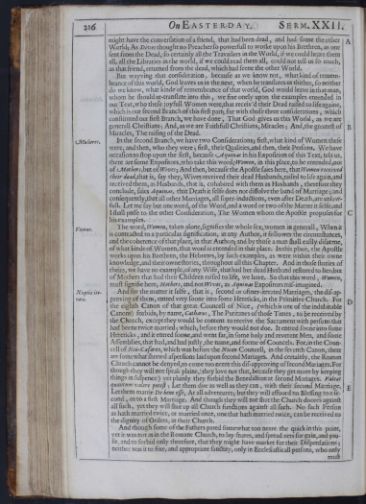 216
On Easter-day.
Serm. XXII.
might have the conversation of a friend, that had been dead, and had seene the other
216
On Easter-day.
Serm. XXII.
might have the conversation of a friend, that had been dead, and had seene the other
World; As Dives thought no Preacher so powerfull to worke upon his Brethren, as one
sent from the Dead, so certainly all the Travailers in the World, if we could heare them
all, all the Libraries in the world, if we could read them all, could not tell us so much,
as that friend, returned from the dead, which had seene the other World.
But wayving that consideration, because as we know not, what kind of remem-
brance of this world, God leaves us in the next, when he translates us thither, so neither
do we know, what kinde of remembrance of that world, God would leave in that man,
whom he should re-translate into this, we fixe onely upon the examples entended in
our Text, who these joyfull Women were, that receiv'd their Dead raised to life againe,
which is our second Branch of this first part; for with those three considerations, which
constituted our first Branch, we have done, That God gives us this World, as we are
generall Christians; And, as we are Faithfull Christians, Miracles; And, the greatest of
Miracles, The raising of the Dead.
In the second Branch, Mulieres. we have two Considerations; first, what kind of Women these
were, and then, who they were; first, their Qualities, and then, their Persons. We have
occasion to stop upon the first, because Aquinas in his Exposition of this Text, tels us,
there are some Expositors, who take this word, Women, in this place, to be entended, not
of Mothers, but of Wives; And then, because the Apostle saies here, that Women received
their dead, that is, say they, Wives received their dead Husbands, raised to life again, and
received them, as Husbands, that is, cohabited with them as Husbands, therefore they
conclude, saies Aquinas, that Death it selfe does not dissolve the band of Marriage; and
consequently, that all other Marriages, all super-inductions, even after Death, are unlaw-
full. Let me say but one word, of the Word, and a word or two of the Matter it selfe, and
I shall passe to the other Consideration, The Women whom the Apostle proposes for
his examples.
The word, Vxores. Women, taken alone, signifies the whole sex, women in generall, When it
is contracted to a particular signification, in any Author, it followes the circumstances,
and the coherence of that place, in that Author; and by those a man shall easily discerne,
of what kinde of Women, that word is entended in that place. In this place, the Apostle
works upon his Brethren, the Hebrews, by such examples, as were within their owne
knowledge, and their owne stories, throughout all this Chapter. And in those stories of
theirs, we have no example, of any Wife, that had her dead Husband restored to her; but
of Mothers that had their Children raised to life, we have. So that this word, Women,
must signifie here, Mothers, and not Wives, as Aquinas Expositors mis-imagined.
And for the matter it selfe, Nuptiæ ite-
ratæ. that is, second or oftner-iterated Marriages, the dis-ap-
proving of them, entred very soone into some Hereticks, in the Primitive Church. For
the eighth Canon of that great Councell of Nice, (which is one of the indubitable
Canons) forbids, by name, Catharos, The Puritanes of those Times, to be received by
the Church, except they would be content to receive the Sacrament with persons that
had beene twice married; which, before they would not doe. It entred soone into some
Hereticks, and it entred soone, and went far, in some holy and reverent Men, and some
Assemblies, that had, and had justly, the name, and forme of Councels. For, in the Coun-
cell of Neo-Cæsarea, which was before the Nicen Councell, in the seventh Canon, there
are somewhat shrewd aspersions laid upon second Mariages. And certainly, the Roman
Church cannot be denyed, to come too neere this dis-approving of second Mariages. For
though they will not speak plaine, (they love not that, because they get more by keeping
things in suspence) yet plainly they forbid the Benediction at second Mariages. Valeat
quantnm valere potest; Let them doe as well as they can, with their second Marriage,
Let them marrie De bene esse, At all adventures; but they will affoord no Blessing to a se-
cond, as to a first Marriage. And though they will not shut the Church doores against
all such, yet they will shut up all Church functions against all such. No such Person
as hath married twice, or married once, one that hath married twice, can be received to
the dignity of Orders, in their Church.
And though some of the Fathers pared somewhat too neare the quick in this point,
yet it was not as in the Romane Church, to lay snares, and spread nets for gain, and pro-
fit, and to forbid only therefore, that they might have market for their Dispensations;
neither was it to fixe, and appropriate sanctity, only in Ecclesiasticall persons, who only must
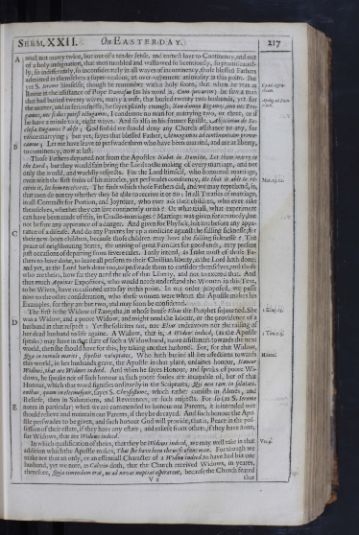 Serm. XXII.
On Easter-day.
217
must not marry twice, but out of a tender sense, and earnest love to Continency, and out
Serm. XXII.
On Easter-day.
217
must not marry twice, but out of a tender sense, and earnest love to Continency, and out
of a holy indignation, that men tumbled and wallowed so licentiously, so promiscuous-
ly, so indifferently, so inconsiderately in all wayes of incontinency, those blessed Fathers
admitted in themselves a super-zealous, an over-vehement animosity in this point. But
yet S. Ierome himselfe, though he remember with a holy scorn, Ep. ad Agers.
chiam. that when he was at
Rome in the assistance of Pope Damasus (as his word is, Cum juvarem) he saw a man
that had buried twenty wives, marry a wife, that buried twenty two husbands, Apolog. ad Pam-
nach. yet for
the matter, and in seriousnesse, he sayes plainly enough, Non damno Bigamos, imo nec Tri-
gamos, nec si dici potest octogamos, I condemne no man for marrying two, or three, or if
he have a minde to it, eight wives. And so also in his former Epistle, Abjicimus de Ec-
clesia Digamos? absit; God forbid we should deny any Church assistance to any, for
twice marrying; but yet, sayes that blessed Father, Monogamos ad continentiam provo-
camus; Let me have leave to perswade them who have been married, and are at liberty,
to continency, now at last.
Those Fathers departed not from the Apostles Nubat in Domino, Let them marry in
the Lord; but they would fain bring the Lord to the making of every marriage, and not
only the world, and worldly respects. For the Lord himself, who honoured marriage,
even with the first fruits of his miracles, yet perswades continency, Mat. 19.22. He that is able to re-
ceive it, let him receive it. The fault which those Fathers did, and we may reprehend, is,
that men do not try whether they be able to receive it or no; In all Treaties of marriage,
in all Contracts for Portion, and Joynture, who ever ask their children, who ever aske
themselves, whether they can live continently or no? Or what triall, what experiment
can have been made of this, in Cradle-marriages? Marriage was given for a remedy; but
not before any apparance of a danger. And given for Physick, but not before any appa-
rance of a disease. And do any Parents lay up a medicine against the falling sicknesse, for
their new-born children, because those children may have the falling sicknesse? The
peace of neighbouring States, the uniting of great Families for good ends, may present
just occasions of departing from severe rules. I only intend, as I take most of those Fa-
thers to have done, to leave all persons to their Christian liberty, as the Lord hath done;
and yet, as the Lord hath done too, to perswade them to consider themselves, and those
who are theirs, how far they need the use of that Liberty, and not to exceed that. And
thus much Aquinas Expositors, who would needs understand the Women in this Text,
to be Wives, have occasioned us to say in this point. In our order proposed, we passe
now to the other consideration, who these women were whom the Apostle makes his
Examples, for they are but two, and may soon be considered.
The first is the Widow of Zareptha, in whose house Elias the Prophet sojourned.1 King. 17. She
was a Widow, and a poore Widow, and might need the labour, or the providence of a
husband in that respect: Yet she solicites not, nor Elias endeavours not the raising of
her dead husband to life againe. A Widow, that is, A Widow indeed,1 Tim. 5.3. (as the Apostle
speaks) may have in that state of such a Widowhood, more assistances towards the next
world, then she should have for this, by taking another husband. For, for that Widow,
Quæ in tumulo mariti, sepeliit voluptates, Who hath buried all her affections towards
this world, in her husbands grave, the Apostle in that place, ordaines honour, Hieron. Honour
Widows, that are Widows indeed. And when he sayes Honour, and speaks of poore Wi-
dows, he speaks not of such honour as such poore soules are incapable of, but of that
Honour, which that word signifies ordinarily in the Scriptures, Qui non tam in salutati-
onibus, quam in elecmosynis, sayes S. Chrysostome, which rather consists in Almes, and
Reliefe, then in Salutations, and Reverences, or such respects. For so (as S. Ierome
notes in particular) when we are commanded to honour our Parents, it is intended wee
should relieve and maintain our Parents, if they be decayed. And such honour the Apo-
stle perswades to be given, and such honour God will provide, that is, Peace in the pos-
session of their estate, if they have any estate; and reliefe from others, if they have none,
for Widows, that are Widows indeed.
In which qualification of theirs, that they be Widows indeed,Ver. 9. we may well take in that
addition which the Apostle makes, That she have been the wise of one man. For though we
make not that an only, or an essentiall Character of a Widow indeed, to have had but one
husband, yet we note, as Calvin doth, that the Church received Widows, in yeares,
therefore, Quia timendum er at, ne ad novas nuptias aspirarent, because the Church feared V2 that
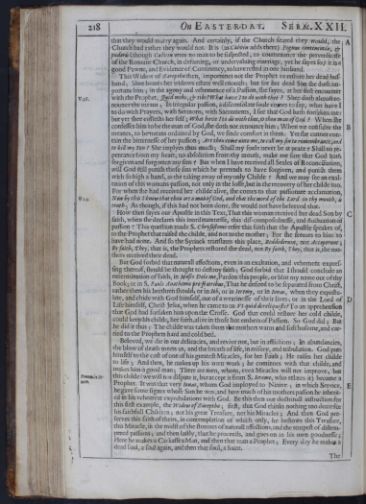 218
On Easter-day.
Serm. XXII.
that they would marry again. And certainly, if the Church feared they would, the
218
On Easter-day.
Serm. XXII.
that they would marry again. And certainly, if the Church feared they would, the
Church had rather they would not. It is (as Calvin adds there) Pignus continentiæ, &
pudoris (though Calvin were no man to be suspected, to countenance the perversnesse
of the Romane Church, in defaming, or undervaluing marriage. yet he sayes so) it is a
good Pawne, and Evidence of Continency, to have rested in one husband.
This Widow of Zareptha then, importunes not the Prophet to restore her dead hus-
band; Shee beares her widows estate well enough; but for her dead Son she doth im-
portune him; in the agony and vehemence of a Passion, she sayes, at her first encounter
with the Prophet, V. 18. Quid mihi, & tibi? What have I to do with thee? Shee doth almost re-
nounce the means; In irregular passion, a disconsolate soule comes to say, what have I
to do with Prayers, with Sermons, with Sacraments, I see that God hath forsaken me:
but yet shee collects her self; What have I to do with thee, O thou man of God? When she
confesses him to be the man of God, she doth not renounce him; When we consider the
meanes, to be means ordained by God, we finde comfort in them. Yet she cannot con-
tain the bitternesse of her passion; Art thou come unto me, to call my sin to remembrance, and
to kill my Son? She implyes thus much; Shall my soule never be at peace? Shall no re-
pentance from my heart, no absolution from thy mouth, make me sure that God hath
forgiven and forgotten my sins? But when I have received all Seales of Reconciliation,
will God still punish those sins which he pretends to have forgiven, and punish them
with so high a hand, as the taking away of my only Childe? And we may see an exal-
tation of this womans passion, not only in the losse, but in the recovery of her childe too.
For when she had received her childe alive, she comes to that passionate acclamation,
Now by this I know that thou art a man of God, and that the word of the Lord in thy mouth, is
truth;V. 14. As though, if this had not been done, she would not have beleeved that.
How then sayes our Apostle in this Text, That this woman received her dead Son by
faith, when she declares this inordinatenesse, this dis-composednesse, and fluctuation of
passion? This question made S. Chrysostome refer this faith that the Apostle speakes of,
to the Prophet that raised the childe, and not to the mother; For she seemes to him to
have had none. And so the Syriack translates this place, Reddiderunt, not Acceperunt;
By faith, They, that is, the Prophets restored the dead, not By faith, They, that is, the mo-
thers received their dead.
But God forbid that naturall affections, even in an exaltation, and vehement expres-
sing thereof, should be thought to destroy faith; God forbid that I should conclude an
extermination of faith, in Moses Dele me, Pardon this people, or blot my name out of thy
Book; or in S. Pauls Anathema pro fratribus, That he desired to be separated from Christ,
rather then his brethren should; or in Iob, or in Ieremy, or in Ionas, when they expostu-
late, and chide with God himself, out of a wearinesse of their lives; or in the Lord of
Life himself, Christ Jesus, when he came to an Vt quid dereliquisti? To an apprehension
that God had forsaken him upon the Crosse. God that could restore her cold childe,
could keep his childe, her faith, alive in those hot embers of Passion. So God did; But
he did it thus; The childe was taken from the mothers warm and soft bosome, and car-
ried to the Prophets hard and cold bed.
Beloved, we die in our delicacies, and revive not, but in afflictions; In abundancies,
the blow of death meets us, and the breath of life, in misery, and tribulation. God puts
himself to the cost of one of his greatest Miracles, for her Faith; He raises her childe
to life; And then, he makes up his own work; he continues with that childe, and
makes him a good man; There are men, whom, even Miracles will not improve; but
this childe (we will not dispute it, Prom. in Io-
nam. but accept it from S. Ierome, who relates it) became a
Prophet. It was that very Ionas, whom God imployed to Ninive; in which Service,
he gave some signes whose Son he was, and how much of his mothers passion he inherit-
ed in his vehement expostulations with God. Be this then our doctrinall instruction for
this first example, the Widow of Zareptha; first, that God thinks nothing too deare for
his faithfull Children; not his great Treasure, not his Miracles; And then God pre-
serves this faith of theirs, in contemplation of which only, he bestows this Treasure,
this Miracle, in the midst of the stormes of naturall affections, and the tempest of distem-
pered passions; and then lastly, that he proceeds, and goes on in his own goodnesse;
Here he makes a Carkasse a Man, and then that man a Prophet; Every day he makes a
dead soul, a soul again, and then that soul, a Saint. The
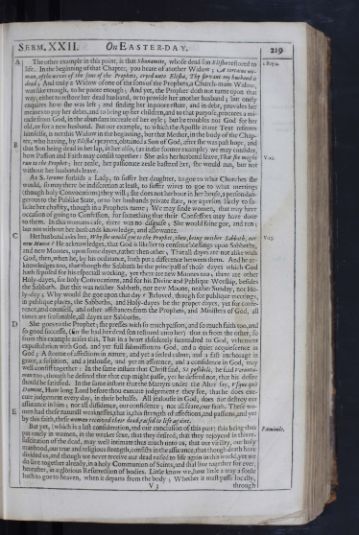 Serm. XXII.
On Easter-day.
219
Serm. XXII.
On Easter-day.
219
The other example in this point, is that Shunamite,2 Reg. 4. whose dead son Elisha restored to
life. In the beginning of that Chapter, you heare of another Widow; A certaine wo-
man, of the wives of the sons of the Prophets, cryed unto Elisha, Thy servant my husband is
dead; And truly a Widow of one of the sons of the Prophets, a Church-mans Widow,
was like enough, to be poore enough; And yet, the Prophet doth not turne upon that
way, either to restore her dead husband, or to provide her another husband; but onely
enquires how she was left; and finding her in poore estate, and in debt, provides her
meanes to pay her debts, and to bring up her children, and to that purpose, procures a mi-
racle from God, in the abundant increase of her oyle; but he troubles not God for her
old, or for a new husband. But our example, to which the Apostle in our Text referres
himselfe, is not this Widow in the beginning, but that Mother, in the body of the Chap-
ter, who having, by Elisha's prayers, obtained a Son of God, after she was past hope, and
that Son being dead in her lap, in her also, (as in the former example) we may consider,
how Passion and Faith may consist together: She asks her husband leave, V. 22. That she might
run to the Prophet; her zeale, her passionate zeale hastned her, she would run, but not
without her husbands leave.
As S. Ierome forbids a Lady, to suffer her daughter, to goe to what Churches she
would, so may there be indiscretion at least, to suffer wives to goe to what meetings
(though holy Convocations) they will; she does not harbour in her house, a person dan-
gerous to the Publike State, or to her husbands private state, nor a person likely to so-
licite her chastity, though in a Prophets name; We may finde women, that may have
occasion of going to Confession, for something that their Confessors may have done
to them. In this womans case, there was no disguise; She would faine goe, and run;
but not without her husbands knowledge, and allowance.
Her husband asks her, Why she would goe to the Prophet, then, being neither Sabbath,V. 23. nor
new Moone? He acknowledges, that God is likelier to conferre blessings upon Sabbaths,
and new Moones, upon some dayes, rather then other; That all dayes are not alike with
God, then, when he, by his ordinance, hath put a difference between them. And he ac-
knowledges too, that though the Sabbath be the principall of those dayes which God
hath seposed for his especiall working, yet there are new Moones too; there are other
Holy-dayes, for holy Convocations, and for his Divine and Publique Worship, besides
the Sabbath. But this was neither Sabbath, nor new Moone, neither Sunday, nor Ho-
ly-day; Why would she goe upon that day? Beloved, though for publique meetings,
in publique places, the Sabbaths, and Holy-dayes be the proper dayes, yet for confe-
rence, and counsell, and other assistances from the Prophets, and Ministers of God, all
times are seasonable, all dayes are Sabbaths.
She goes to the Prophet; she presses with so much passion, and so much faith too, and
so good successe, (for she had her dead son restored unto her) that as from the other, so
from this example arises this, That in a heart absolutely surrendred to God, vehement
expostulation with God, and yet full submission to God, and a quiet acquiescence in
God; A storme of affections in nature, and yet a setled calme, and a fast anchorage in
grace, a suspition, and a jealousie, and yet an assurance, and a confidence in God, may
well consist together: In the same instant that Christ said, Si possibile, he said Verunta-
men too; though he desired that that cup might passe, yet he desired not, that his desire
should be satisfied. In the same instant that the Martyrs under the Altar say, Vsque quò
Domine, How long Lord before thou execute judgement? they see, that he does exe-
cute judgement every day, in their behalfe. All jealousie in God, does not destroy our
assurance in him; nor all diffidence, our confidence; nor all feare, our faith. These wo-
men had these naturall weaknesses, that is, this strength of affections, and passions, and yet
by this faith, these women received their dead, raised to life againe.
But yet, (which is a last consideration, Fœminile. and our conclusion of this part) this being thus
put onely in women, in the weaker sexe, that they desired, that they rejoyced in this re-
suscitation of the dead, may well intimate thus much unto us, that our virility, our holy
manhood, our true and religious strength, consists in the assurance, that though death have
divided us, and though we never receive our dead raised to life again in this world, yet we
do live together already, in a holy Communion of Saints, and shal live together for ever,
hereafter, in a glorious Resurrection of bodies. Little know we, how little a way a soule
hath to goe to heaven, when it departs from the body; Whether it must passe locally, V3 through
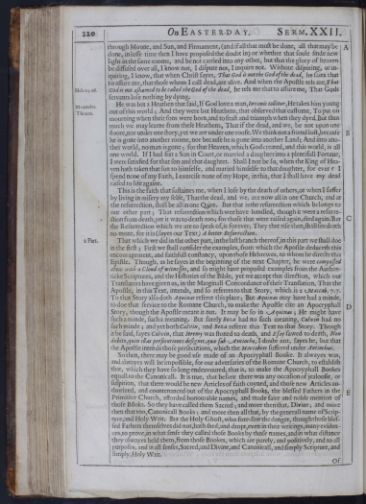 220
On Easter-day.
Serm. XXII.
through Moone, and Sun, and Firmament, (and if all that must be done, all that may be
220
On Easter-day.
Serm. XXII.
through Moone, and Sun, and Firmament, (and if all that must be done, all that may be
done, in lesse time then I have proposed the doubt in) or whether that soule finde new
light in the same roome, and be not carried into any other, but that the glory of heaven
be diffused over all, I know not, I dispute not, I inquire not. Without disputing, or in-
quiring, I know, that when Christ sayes, That God is not the God of the dead, he saies that
to assure me, that those whom I call dead, are alive. And when the Apostle tels me, That
God is not ashamed to be called the God of the dead,Heb. 11.16. he tels me that to assure me, That Gods
servants lose nothing by dying.
He was but a Heathen that said, Menander.
Thraces. If God love a man, Iuvenis tollitur, He takes him young
out of this world; And they were but Heathens, that observed that custome, To put on
mourning when their sons were born, and to feast and triumph when they dyed. But thus
much we may learne from these Heathens, That if the dead, and we, be not upon one
floore, nor under one story, yet we are under one roofe. We think not a friend lost, because
he is gone into another roome, nor because he is gone into another Land; And into ano-
ther world, no man is gone; for that Heaven, which God created, and this world, is all
one world. If I had fixt a Son in Court, or married a daughter into a plentifull Fortune,
I were satisfied for that son and that daughter. Shall I not be so, when the King of Hea-
ven hath taken that son to himselfe, and maried himselfe to that daughter, for ever? I
spend none of my Faith, I exercise none of my Hope, in this, that I shall have my dead
raised to life againe.
This is the faith that sustaines me, when I lose by the death of others, or when I suffer
by living in misery my selfe, That the dead, and we, are now all in one Church, and at
the resurrection, shall be all in one Quire. But that is the resurrection which belongs to
our other part; That resurrection which wee have handled, though it were a resurre-
ction from death, yet it was to death too; for those that were raised again, died again. But
the Resurrection which we are to speak of, is forever; They that rise then, shall see death
no more, for it is (sayes our Text) A better Resurrection.
That which we did in the other part, 2 Part. in the last branch thereof, in this part we shall doe
in the first; First we shall consider the examples, from which the Apostle deduceth this
encouragement, and faithfull constancy, upon those Hebrewes, to whom he directs this
Epistle. Though, as he sayes in the beginning of the next Chapter, he were compassed
about with a Cloud of witnesses, and so might have proposed examples from the Authen-
ticke Scriptures, and the Histories of the Bible, yet we accept that direction, which our
Translators have given us, in the Marginall Concordance of their Translation, That the
Apostle, in this Text, intends, and so referres to that Story, which is 2 Maccab. 7.7.
To that Story also doth Aquinas referre this place; But Aquinas may have had a minde,
to doe that service to the Romane Church, to make the Apostle cite an Apocryphall
Story, though the Apostle meant it not. It may be so in Aquinas; He might have
such a minde, such a meaning. But surely Beza had no such meaning, Calvin had no
such minde; and yet both Calvin, and Beza referre this Text to that Story. Though
it be said, sayes Calvin, that Ieremy was stoned to death, and Esay sawed to death, Non
dubito, quin illas persecutiones designet, quæ sub Antiocho, I doubt not, sayes he, but that
the Apostle intends those persecutions, which the Maccabees suffered under Antiochus.
So then, there may be good use made of an Apocryphall Booke. It alwayes was,
and alwayes will be impossible, for our adversaries of the Romane Church, to establish
that, which they have so long endeavoured, that is, to make the Apocryphall Bookes
equall to the Canonicall. It is true, that before there was any occasion of jealousie, or
suspition, that there would be new Articles of faith coyned, and those new Articles au-
thorized, and countenanced out of the Apocryphall Books, the blessed Fathers in the
Primitive Church, afforded honourable names, and made faire and noble mention of
those Books. So they have called them Sacred; and more then that, Divine; and more
then that too, Canonicall Books; and more then all that, by the generall name of Scrip-
ture, and Holy Writ. But the Holy Ghost, who fore-saw the danger, though those bles-
sed Fathers themselves did not, hath shed, and dropt, even in their writings, many eviden-
ces, to prove, in what sense they called those Books by those names, and in what distance
they alwayes held them, from those Bookes, which are purely, and positively, and to all
purposes, and in all senses, Sacred, and Divine, and Canonicall, and simply Scripture, and
simply, Holy Writ. Of
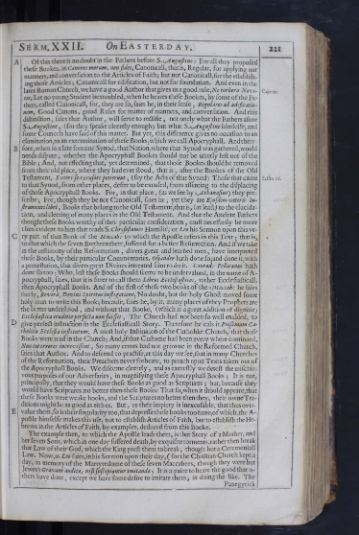 Serm. XXII.
On Easter-day.
221
Serm. XXII.
On Easter-day.
221
Of this there is no doubt in the Fathers before S. Augustine: For all they proposed
these Bookes, as Canones morum, non sidei, Canonicall, that is, Regular, for applying our
manners, and conversation to the Articles of Faith; but not Canonicall, for the establish-
ing those Articles; Canonicall for edification, but not for foundation. And even in the
later Roman Church, we have a good Author that gives us a good rule, Cajetan. Ne turberis Novi-
tie, Let no young Student be troubled, when he heares these Bookes, by some of the Fa-
thers, called Canonicall, for, they are so, saies he, in their sense, Regulares ad ædificatio-
nem, Good Canons, good Rules for matter of manners, and conversation. And this
distinction, saies that Author, will serve to rectifie, not onely what the Fathers afore
S. Augustine, (for they speake cleerely enough) but what S. Augustine himselfe, and
some Councels have said of this matter. But yet, this difference gives no occasion to an
elimination, to an extermination of these Books, which we call Apocryphall. And there-
fore, when in a late forraine Synod, that Nation, where that Synod was gathered, would
needs dispute, whether the Apocryphall Bookes should not be utterly left out of the
Bible; And, not effecting that, yet determined, that those Bookes should be removed
from their old place, where they had ever stood, that is, after the Bookes of the Old
Testament, Exteri se excusari petierunt,Sessio 10. (say the Acts of that Synod) Those that came
to that Synod, from other places, desire to be excused, from assenting to the displacing
of those Apocryphall Books. For, in that place, (as we see by Athanasius) they pre-
scribe; For, though they be not Canonicall, saies he, yet they are Ejusdem veteris In-
strumenti libri, Books that belong to the Old Testament, that is, (at least) to the elucida-
tion, and cleering of many places in the Old Testament. And that the Ancient Fathers
thought these Books worthy of their particular consideration, must necessarily be more
then evident to him that reads S. Chrysostomes Homilie, or Leo his Sermon upon this ve-
ry part of that Book of the Maccab: to which the Apostle refers in this Text; that is,
to that which the seven Brethren there, suffered for a better Resurrection. And if we take
in the testimony of the Reformation, divers great and learned men, have interpreted
these Books, by their particular Commentaries. Osyander hath done so, and done it, with
a protestation, that divers great Divines intreated him to do it. Conrad: Pellicanus hath
done so too; Who, lest these Books should seeme to be undervalued, in the name of A-
pocryphall, saies, that it is fitter to call them Libros Ecclesiasticos, rather Ecclesiasticall,
then Apocryphall Books. And of the first of these two books of the Maccab: he saies
freely, Reverà, Divini Spiritus instigatione, No doubt, but the holy Ghost moved some
holy man to write this Book; because, saies he, by it, many places of they Prophets are
the better understood, and without that Booke, (which is a great addition of dignitie)
Ecclesiastica eruditio perfecta non fuisset, The Church had not been so well enabled, to
give perfect instruction in the Ecclesiasticall Story. Therefore he cals it Piissimum Ca-
tholicæ Ecclesiæ institutum, A most holy Institution of the Catholike Church, that those
Books were read in the Church; And, if that Custome had been every where continued,
Non tot errores increvissent, So many errors had not growne in the Reformed Church,
saies that Author. And to descend to practise, at this day we see, that in many Churches
of the Reformation, their Preachers never forbeare, to preach upon Texts taken out of
the Apocryphall Books. We discerne cleerely, and as earnestly we detest the mischie-
vous purposes of our Adversaries, in magnifying these Apocryphall Books; It is not,
principally, that they would have these Books as good as Scriptures; but, because they
would have Scriptures, no better then these Books: That so, when it should appeare, that
these Books were weake books, and the Scriptures no better then they, their owne Tra-
ditions might be as good as either. But, as their impiety is inexcusable, that thus over-
value them, so is their singularity too, that depresse these books too farre; of which, the A-
postle himselfe makes this use, not to establish Articles of Faith, but to establish the He-
brews in the Articles of Faith, by examples, deduced from this Booke.
The example then, to which the Apostle leads them, is that Story of a Mother, and
her seven Sons, which in one day suffered death, by exquisite torments, rather then break
that Law of their God, which the King prest them to break, though but a Ceremoniall
Law. Now, as Leo saies, in his Sermon upon their day, (for the Christian Church kept a
day, in memory of the Martyredome of these seven Maccabees, though they were but
Jewes) Gravant audita, nisi suscipiantur imitanda; It is a paine to heare the good that o-
thers have done, except we have some desire to imitate them, in doing the like. The Panegyrick
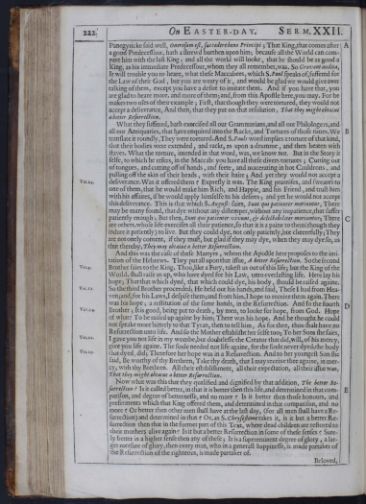 222
On Easter-day.
Serm. XXII.
Panegyricke said well, Onerosum est, succederebono Principi; That King, that comes after
222
On Easter-day.
Serm. XXII.
Panegyricke said well, Onerosum est, succederebono Principi; That King, that comes after
a good Predecessour, hath a shrewd burthen upon him; because all the World can com-
pare him with the last King; and all the world will looke, that he should be as good a
King, as his immediate Predecessour, whom they all remember, was. So Gravant audita,
It will trouble you to heare, what these Maccabees, which S. Paul speaks of, suffered for
the Law of their God, but you are weary of it, and would be glad we would give over
talking of them, except you have a desire to imitate them. And if you have that, you
are glad to heare more, and more of them; and, from this Apostle here, you may. For he
makes two uses of their example; First, that though they were tortured, they would not
accept a deliverance, And then, that they put on that resolution, That they might obtaine
a better Resurrection.
What they suffered, hath exercised all our Grammarians, and all our Philologers, and
all our Antiquaries, that have enquired into the Racks, and Tortures of those times. We
translate it roundly, They were tortured. And S. Pauls word implies a torture of that kind,
that their bodies were extended, and rackt, as upon a drumme, and then beaten with
staves. What the torture, intended in that word, was, we know not. But in the Story it
selfe, to which he refers, in the Maccab: you have all these divers tortures; Cutting out
of tongues, and cutting off of hands, and feete, and macerating in hot Cauldrons, and
pulling off the skin of their heads, with their haire; And yet they would not accept a
deliverance.Ver. 24. Was it offered them? Expresly it was. The King promises, and sweares to
one of them, that he would make him Rich, and Happie, and his Friend, and trust him
with his affaires, if he would apply himselfe to his desires; and yet he would not accept
this deliverance. This is that which S. August: saies, Sunt qui patienter moriuntur, There
may be many found, that dye without any distemper, without any impatience, that suffer
patiently enough; But then, Sunt qui patienter vivunt, & delectabiliter moriuntur; There
are others, whose life exercises all their patience, so that it is a paine to them (though they
indure it patiently) to live. But they could dye, not only patiently, but cheerefully; They
are not onely content, if they must, but glad if they may dye, when they may dye so, as
that thereby, They may obtaine a better Resurrection.
And this was the case of these Martyrs, whom the Apostle here proposes to the imi-
tation of the Hebrews. They put all upon that issue, A better Resurrection. So the second
Brother saies to the King, Ver. 9. Thou, like a Fury, takest us out of this life; but the King of the
World, shall raise us up, who have dyed for his Law, unto everlasting life. Here lay his
hope; That that which dyed, that which could dye, his body, should be raised againe.
So the third Brother proceeded;Ver. 11. He held out his hands, and said, These I had from Hea-
ven; and, for his Laws, I despise them; and from him, I hope to receive them again. There
was his hope; a restitution of the same hands, in the Resurrection. And so the fourth
Brother;Ver. 14. It is good, being put to death, by men, to looke for hope, from God. Hope
of what? To be raised up againe by him; There was his hope. And he thought he could
not speake more bitterly to that Tyran, then to tell him, As for thee, thou shalt have no
Resurrection unto life. And so the Mother establisht her selfe too; To her Sons she saies,
I gave you not life in my wombe, Ver. 22. but doubtlesse the Creator that did, will, of his mercy,
give you life againe. The soule needed not life againe, for the soule never dyed; the body
that dyed, Ver. 29. did; Therefore her hope was in a Resurrection. And to her youngest Son she
said, Be worthy of thy Brethren, Take thy death, that I may receive thee againe, in mer-
cy, with thy Brethren. All their establishment, all their expectation, all their issue was,
That they might obtaine a better Resurrection.
Now what was this that they qualified and dignified by that addition, The better Re-
surrection? Is it called better, in that it is better then this life, and determined in that com-
parison, and degree of betternesse, and no more? Is it better then those honours, and
preferments which that King offered them, and determined in that comparison, and no
more? Or better then other men shall have at the last day, (for all men shall have a Re-
surrection) and determined in that? Or, as S. Chrysostome takes it, is it but a better Re-
surrection then that in the former part of this Text, where dead children are restored to
their mothers alive again? Is it but a better Resurrection in some of these senses? Sure-
ly better in a higher sense then any of these; It is a supereminent degree of glory, a lar-
ger measure of glory, then every man, who in a generall happinesse, is made partaker of
the Resurrection of the righteous, is made partaker of. Beloved
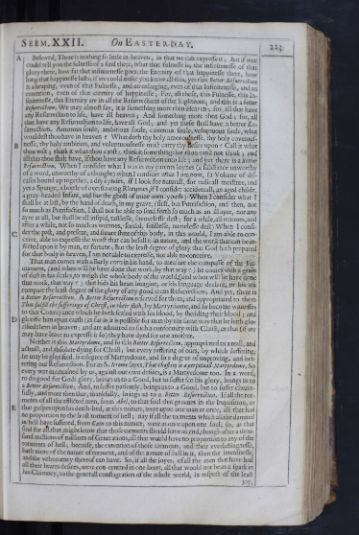 Serm. XXII.
On Easter-day.
223
Serm. XXII.
On Easter-day.
223
Beloved, There is nothing so little in heaven, as that we can expresse it; But if wee
could tell you the fulnesse of a soul there, what that fulnesse is; the infinitenesse of that
glory there, how far that infinitenesse goes; the Eternity of that happinesse there, how
long that happinesse lasts; if we could make you know all this, yet this Better Resurrection
is a heaping, even of that Fulnesse, and an enlarging, even of that Infinitenesse, and an
extention, even of that eternity of happinesse; For, all these, this Fulnesse, this In-
finitenesse, this Eternity are in all the Resurrections of the Righteous, and this is a better
Resurrection; We may almost say, it is something more then Heaven; for, all that have
any Resurrection to life, have all heaven; And something more then God; for, all
that have any Resurrection to life, have all God; and yet these shall have a better Re-
surrection. Amorous soule, ambitious soule, covetous soule, voluptuous soule, what
wouldest thou have in heaven? What doth thy holy amorousnesse, thy holy covetous-
nesse, thy holy ambition, and voluptuousnesse most carry thy desire upon? Call it what
thou wilt; think it what thou canst; think it something that thou canst not think; and
all this thou shalt have, if thou have any Resurrection unto life; and yet there is a Better
Resurrection. When I consider what I was in my parents loynes (a substance unworthy
of a word, unworthy of a thought) when I consider what I am now, (a Volume of dis-
eases bound up together, a dry cynder, if I look for naturall, for radicall moisture, and
yet a Spunge, a bottle of overflowing Rheumes, if I consider accidentall; an aged childe,
a gray-headed Infant, and but the ghost of mine own youth) When I consider what I
shall be at last, by the hand of death, in my grave, (first, but Putrifaction, and then, not
so much as Putrifaction, I shall not be able to send forth so much as an ill ayre, not any
ayre at all, but shall be all insipid, tastlesse, savourlesse dust; for a while, all wormes, and
after a while, not so much as wormes, sordid, senslesse, namelesse dust) When I consi-
der the past, and present, and suture state of this body, in this world, I am able to con-
ceive, able to expresse the worst that can befall it in nature, and the worst that can be in-
flicted upon it by man, of fortune; But the least degree of glory that God hath prepared
for that body in heaven, I am not able to expresse, not able to conceive.
That man comes with a Barly corn in his hand, to measure the compasse of the Fir-
mament, (and when will he have done that work, by that way?) he comes with a grain
of dust in his scales, to weigh the whole body of the world, (and when will he have done
that work, that way?) that bids his heart imagine, or his language declare, or his wit
compare the least degree of the glory of any good mans Resurrection; And yet, there is
a Better Resurrection. A Better Resurrection reserved for them, and appropriated to them
That fulfill the sufferings of Christ, in their flesh, by Martyrdome, and so become witnesses
to that Conveyance which he hath sealed with his blood, by shedding their blood; and
glorifie him upon earth (as far as it is possible for man) by the same way that he hath glo-
rified them in heaven; and are admitted to such a conformity with Christ, as that (if we
may have leave to expresse it so) they have dyed for one another.
Neither is this Martyrdome, and so this Better Resurrection, appropriated to a reall, and
actuall, and absolute dying for Christ; but every suffering of ours, by which suffering,
he may be glorified, is a degree of Martyrdome, and so a degree of improving, and bet-
tering our Resurrection. For as S. Ierome sayes, That chastity is a perpetuall Martyrdome, So
every war maintained by us, against our own desires, is a Martyrdome too. In a word,
to do good for Gods glory, brings us to a Good, but to suffer for his glory, brings us to
a Better Resurrection; And, to suffer patiently, brings us to a Good, but to suffer cheare-
fully, and more then that, thankfully, brings us to a Better Resurrection. If all the tor-
ments of all the afflicted men, from Abel, to that soul that groanes in the Inquisition, or
that gaspes upon his death-bed, at this minute, were upon one man at once, all that had
no proportion to the least torment of hell; nay if all the torments which all the damned
in hell have suffered, from Cain to this minute, were at once upon one soul, so, as that
soul for all that might know that those torments should have an end, though after a thou-
sand millions of millions of Generations, all that would have no proportion to any of the
torments of hell; because, the extention of those torments, and their everlastingnesse,
hath more of the nature of torment, and of the nature of hell in it, then the intensnesse,
and the vehemency thereof can have. So, if all the joyes, of all the men that have had
all their hearts desires, were con-centred in one heart, all that would not be as a spark in
his Chimney, to the generall conflagration of the whole world, in respect of the least joy,
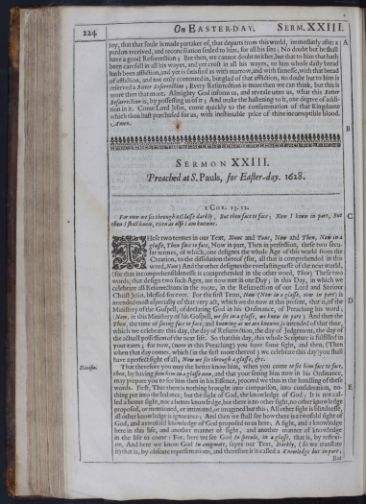 224
On Easter-day.
Serm. XXIII.
joy, that that soule is made partaker of, that departs from this world, immediatly after a
224
On Easter-day.
Serm. XXIII.
joy, that that soule is made partaker of, that departs from this world, immediatly after a
pardon received, and reconciliation sealed to him, for all his sins; No doubt but he shall
have a good Resurrection; But then, we cannot doubt neither, but that to him that hath
been carefull in all his wayes, and yet crost in all his wayes, to him whose daily bread
hath been affliction, and yet is satisfied as with marrow, and with fatnesse, with that bread
of affliction, and not only contented in, but glad of that affliction, no doubt but to him is
reserved a Better Resurrection; Every Resurrection is more then we can think, but this is
more then that more. Almighty God inform us, and reveale unto us, what this Better
Resurrection is, by possessing us of it; And make the hastening to it, one degree of addi-
tion in it. Come Lord Jesus, come quickly to the consummation of that Kingdome
which thou hast purchased for us, with inestimable price of thine incorruptible blood.
Amen.
Sermon XXIII.
Preached at S. Pauls, for Easter-day. 1628.
1 Cor. 13.12.
For now we see through a Glasse darkly, But then face to sace; Now I know in part, But
then I shall know, even as also I am knowne.
THeseThese two termes in our Text, Nunc and Tunc, Now and Then, Now in a
glasse, Then face to face, Now in part, Then in perfection, these two secu-
lar termes, of which, one designes the whole Age of this world from the
Creation, to the dissolution thereof (for, all that is comprehended in this
word, Now) And the other designes the everlastingnesse of the next world,
(for that incomprehensiblenesse is comprehended in the other word, Then) These two
words, that design two such Ages, are now met in one Day; in this Day, in which we
celebrate all Resurrections in the roote, in the Resurrection of our Lord and Saviour
Christ Jesus, blessed for ever. For the first Term, Now (Now in a glasse, now in part) is
intended most especially of that very act, which we do now at this present, that is, of the
Ministery of the Gospell, of declaring God in his Ordinance, of Preaching his word;
(Now, in this Ministery of his Gospell, we see in a glasse, we know in part) And then the
Then, the time of seeing face to face, and knowing as we are knowne, is intended of that time,
which we celebrate this day, the day of Resurrection, the day of Judgement, the day of
the actuall possession of the next life. So that this day, this whole Scripture is fulfilled in
your eares; for now, (now in this Preaching) you have some sight, and then, (Then
when that day comes, which (in the first roote thereof) we celebrate this day) you shall
have a perfect sight of all; Now we see through a glasse, &c.
That therefore you may the better know him, Divisio. when you come to see him face to face,
then, by having seen him in a glasse now, and that your seeing him now in his Ordinance,
may prepare you to see him then in his Essence, proceed we thus in the handling of these
words. First, That there is nothing brought into comparison, into consideration, no-
thing put into the balance, but the sight of God, the knowledge of God; It is not cal-
led a better sight, nor a better knowledge, but there is no other sight, no other knowledge
proposed, or mentioned, or intimated, or imagined but this; All other sight is blindnesse,
all other knowledge is ignorance; And then we shall see how there is a twofold sight of
God, and a twofold knowledge of God proposed to us here; A sight, and a knowledge
here in this life, and another manner of sight, and another manner of knowledge
in the life to come: For, here we see God In speculo, in a glasse, that is, by reflexi-
on, And here we know God In ænigmate, sayes our Text, Darkly, (so we translate
it) that is, by obscure representations, and therefore it is called a Knowledge but in part; But
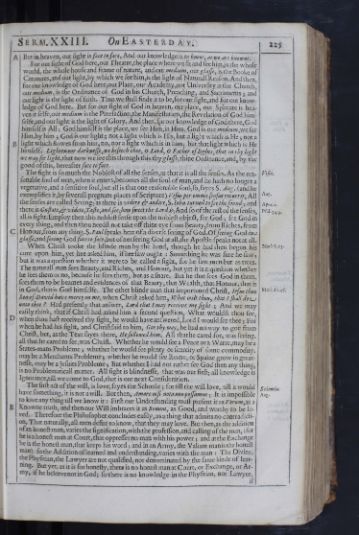 Serm. XXIII.
On Easter-day.
225
But in heaven, our sight is face to face, And our knowledge is to know, as we are knowne.
For our sight of God here, our Theatre, the place where we sit and see him, is the whole
Serm. XXIII.
On Easter-day.
225
But in heaven, our sight is face to face, And our knowledge is to know, as we are knowne.
For our sight of God here, our Theatre, the place where we sit and see him, is the whole
world, the whole house and frame of nature, and our medium, our glasse, is the Booke of
Creatures, and our light, by which we see him, is the light of Naturall Reason. And then,
for our knowledge of God here, our Place, our Academy, our University is the Church,
our medium, is the Ordinance of God in his Church, Preaching, and Sacraments; and
our light is the light of faith. Thus we shall finde it to be, for our sight, and for our know-
ledge of God here. But for our sight of God in heaven, our place, our Spheare is hea-
ven it selfe, our medium is the Patefaction, the Manifestation, the Revelation of God him-
selfe, and our light is the light of Glory. And then, for our knowledge of God there, God
himself is All; God himself is the place, we see Him, in Him; God is our medium, we see
Him, by him; God is our light; not a light which is His, but a light which is He; not a
light which flowes from him, no, nor a light which is in him, but that light which is He
himself. Lighten our darknesse, we beseech thee, O Lord, O Father of lights, that in thy light
we may see light, that now we see this through this thy glasse, thine Ordinance, and, by the
good of this, hereafter face to face. The sight is so much the Noblest of all the senses, as that it is all the senses.Visio. As the rea-
sonable soul of man, when it enters, becomes all the soul of man, and he hath no longer a
vegetative, and a sensitive soul, but all is that one reasonable soul; so, sayes S. Aug. (and he
exemplifies it, by severall pregnant places of Scripture) Visus per omnes sensus recurrit,Aug. All
the senses are called Seeing; as there is videre & audire, S. Iohn turned to see the sound;Apoc. 1. and
there is Gustate, & videte, Taste, and see, how sweet the Lord is; And so of the rest of the senses, Psal. 34.9.
all is sight. Employ then this noblest sense upon the noblest object, see God; see God in
every thing, and then thou needst not take off thine eye from Beauty, from Riches, from
Honour, from any thing. S. Paul speaks here of a diverse seeing of God. Of seeing God in a
glasse, and seeing God face to face; but of not seeing God at all, the Apostle speaks not at all. When Christ tooke the blinde man by the hand, Mark 8.23. though he had then begun his
cure upon him, yet hee asked him, if hee saw ought: Something he was sure he saw;
but it was a question whether it were to be called a sight, for he saw men but as trees.
The naturall man sees Beauty, and Riches, and Honour, but yet it is a question whether
he sees them or no, because he sees them, but as a snare. But he that sees God in them,
sees them to be beames and evidences of that Beauty, that Wealth, that Honour, that is
in God, that is God himselfe. The other blinde man that importuned Christ, Mark 10.46. Iesus thou
Son of David have mercy on me, when Christ asked him, What wilt thou, that I shall doe
unto thee? Had presently that answer, Lord that I may receive my sight; And we may
easily think, that if Christ had asked him a second question, What wouldst thou see,
when thou hast received thy sight, he would have answered, Lord I would see thee; For
when he had his sight, and Christ said to him, Goe thy way, he had no way to goe from
Christ, but, as the Text sayes there, He followed him. All that he cared for, was seeing,
all that he cared to see, was Christ. Whether he would see a Peace or a Warre, may be a
States-mans Probleme; whether he would see plenty or scarcity of some commodity,
may be a Merchants Probleme; whether he would see Rome, or Spaine grow in great-
nesse, may be a Jesuits Probleme; But whether I had not rather see God then any thing,
is no Problematicall matter. All sight is blindnesse, that was our first; all knowledge is
Ignorance, till we come to God, that is our next Consideration. The first act of the will, is love, sayes the Schoole; for till the will love, till it would Scientia.
have something, it is not a will. But then, Amare nisi nota non possumus; It is impossible Aug.
to love any thing till we know it: First our Understanding must present it as Verum, as a
Knowne truth, and then our Will imbraces it as Bonum, as Good, and worthy to be lo-
ved. Therefore the Philosopher concludes easily, as a thing that admits no contradicti-
on. That naturally, all men desire to know, that they may love. But then, as the addition
of an honest man, varies the signification, with the profession, and calling of the man, (for
he is a honest man at Court, that oppresses no man with his power; and at the Exchange
he is the honest man, that keeps his word; and in an Army, the Valiant man is the honest
man) so the Addition of learned and understanding, varies with the man: The Divine,
the Physitian, the Lawyer are not qualified, nor denominated by the same kinde of lear-
ning. But yet, as it is for honesty, there is no honest man at Court, or Exchange, or Ar-
my, if he beleeve not in God; so there is no knowledge in the Physitian, nor Lawyer, if
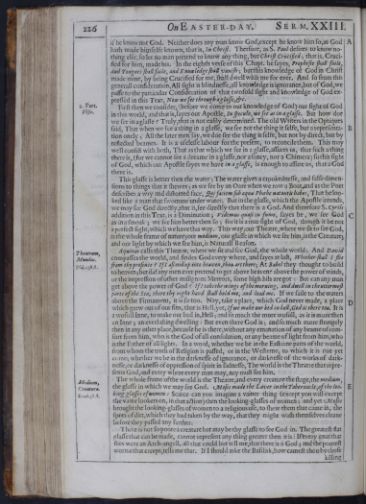 226
On Easter.
Serm. XXIII.
if he know not God. Neither does any man know God, except he know him so, as God
226
On Easter.
Serm. XXIII.
if he know not God. Neither does any man know God, except he know him so, as God
hath made himselfe known, that is, In Christ. Therefore, as S. Paul desires to know no-
thing else, so let no man pretend to know any thing, but Christ Crucified; that is, Cruci-
fied for him, made his. In the eighth verse of this Chapt. he sayes, Prophesie shall faile,
and Tongues shall faile, and Knowledge shall vanish; but this knowledge of God in Christ
made mine, by being Crucified for me, shall dwell with me for ever. And so from this
generall consideration, All sight is blindnesse, all knowledge is ignorance, but of God, we
passe to the particular Consideration of that twofold sight and knowledge of God ex-
pressed in this Text, Now we see through a glasse, &c. First then we consider, 2. Part. (before we come to our knowledge of God) our sight of God
in this world, and that is, sayes our Apostle, In speculo, we see as in a glasse. But how doe Visio.
we see in a glasse? Truly, that is not easily determined. The old Writers in the Optiques
said, That when we see a thing in a glasse, we see not the thing it selfe, but a representa-
tion onely; All the later men say, we doe see the thing it selfe, but not by direct, but by
reflected beames. It is a uselesse labour for the present, to reconcile them. This may
well consist with both, That as that which we see in a glasse, assures us, that such a thing
there is, (for we cannot see a dreame in a glasse, nor a fancy, nor a Chimera) so this sight
of God, which our Apostle sayes we have in a glasse, is enough to assure us, that a God
there is. This glasse is better then the water; The water gives a crookednesse, and false dimen-
sions to things that it shewes; as we see by an Oare when we row a Boat, and as the Poet
describes a wry and distorted face, Qui faciem sub aqua Phœbe natant is habes, That he loo-
ked like a man that swomme under water. But in the glasse, which the Apostle intends,
we may see God directly, that is, see directly that there is a God. And therefore S. Cyrils
addition in this Text, is a Diminution; Videmus quasi in fumo, sayes he, we see God
as in a smoak; we see him better then so; for it is a true sight of God, though it be not
a perfect sight, which we have this way. This way, our Theatre, where we sit to see God,
is the whole frame of nature; our medium, our glasse in which we see him, is the Creature;
and our light by which we see him, is Naturall Reason. Aquinas calls this Theatre, Theatrum,
Mundus. where we sit and see God, the whole world; And David
compasses the world, and findes God every where, and sayes at last, Whither shall I flie
from thy presence?Psal. 138.8. If I ascend up into heaven, thou art there; At Babel they thought to build
to heaven; but did any men ever pretend to get above heaven? above the power of winds,
or the impression of other malignant Meteors, some high hils are got: But can any man
get above the power of God? If I take the wings of the morning, and dwell in the uttermost
parts of the Sea, there thy right hand shall hold me, and lead me. If we saile to the waters
above the Firmament, it is so too. Nay, take a place, which God never made, a place
which grew out of our sins, that is Hell, yet, If we make our bed in hell, God is there too. It is
a wofull Inne, to make our bed in, Hell; and so much the more wofull, as it is more then
an Inne; an everlasting dwelling: But even there God is; and so much more strangely
then in any other place, because he is there, without any emanation of any beame of com-
fort from him, who is the God of all consolation, or any beame of light from him, who
is the Father of all lights. In a word, whether we be in the Easterne parts of the world,
from whom the truth of Religion is passed, or in the Westerne, to which it is not yet
come; whether we be in the darknesse of ignorance, or darknesse of the works of dark-
nesse, or darknesse of oppression of spirit in sadnesse, The world is the Theatre that repre-
sents God, and every where every man may, nay must see him. The whole frame of the world is the Theatre, Medium,
Creatura. and every creature the stage, the medium,
the glasse in which we may see God. Moses made the Laver in the Tabernacle, of the loo-
king glasses of women:Exod. 38.8. Scarce can you imagine a vainer thing (except you will except
the vaine lookers on, in that action) then the looking-glasses of women; and yet Moses
brought the looking-glasses of women to a religious use, to shew them that came in, the
spots of dirt, which they had taken by the way, that they might wash themselves cleane
before they passed any farther. There is not so poore a creature but may be thy glasse to see God in. The greatest slat
glasse that can be made, cannot represent any thing greater then it is: If every gnat that
flies were an Arch-angell, all that could but tell me, that there is a God; and the poorest
worme that creeps, tells me that. If I should aske the Basilisk, how camest thou by those killing
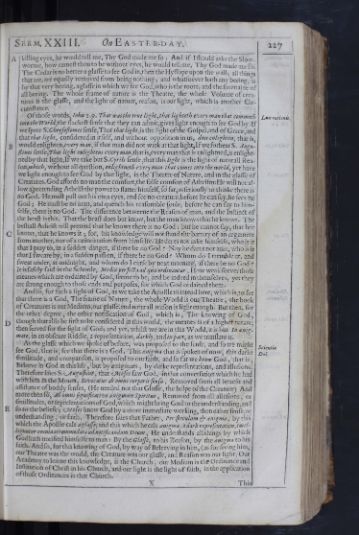 Serm. XXIII.
On Easter-day.
227
killing eyes, he would tell me, Thy God made me so; And if I should aske the Slow-
Serm. XXIII.
On Easter-day.
227
killing eyes, he would tell me, Thy God made me so; And if I should aske the Slow-worme, how camest thou to be without eyes, he would tell me, Thy God made me so.
The Cedar is no better a glasse to see God in, then the Hyssope upon the wall; all things
that are, are equally removed from being nothing; and whatsoever hath any beeing, is
by that very beeing, a glasse in which we see God, who is the roote, and the fountaine of
all beeing. The whole frame of nature is the Theatre, the whole Volume of crea-
tures is the glasse, and the light of nature, reason, is our light, which is another Cir-
cumstance. Of those words, Iohn 1.9. That was the true light,Lux rationis. that lighteth every man that commeth
into the World, the slackest sense that they can admit, gives light enough to see God by. If
we spare S. Chrysostomes sense, That that light, is the light of the Gospel, and of Grace, and
that that light, considered in it self, and without opposition in us, does enlighten, that is,
would enlighten, every man, if that man did not wink at that light; If we forbear S. Augu-
stines sense, That light enlightens every man, that is, every man that is enlightned, is enlight-
ned by that light; If we take but S. Cyrils sense, that this light is the light of naturall Rea-
son, which, without all question, enlightneth every man that comes into the world, yet have
we light enough to see God by that light, in the Theatre of Nature, and in the glasse of
Creatures. God affords no man the comfort, the false comfort of Atheism: He will not al-
low a pretending Atheist the power to flatter himself, so far, as seriously to thinke there is
no God. He must pull out his own eyes, and see no creature, before he can say, he sees no
God; He must be no man, and quench his reasonable soule, before he can say to him-
selfe, there is no God. The difference betweene the Reason of man, and the Instinct of
the beast is this, That the beast does but know, but the man knows that he knows. The
bestiall Atheist will pretend that he knows there is no God; but he cannot say, that hee
knows, that he knows it; for, his knowledge will not stand the battery of an argument
from another, nor of a ratiocination from himselfe. He dares not aske himselfe, who is it
that I pray to, in a sudden danger, if there be no God? Nay he dares not aske, who is it
that I sweare by, in a sudden passion, if there be no God? Whom do I tremble at, and
sweat under, at midnight, and whom do I curse by next morning, if there be no God?
It is safely said in the Schoole, Media perfecta ad quæ ordinantur, How weak soever those
meanes which are ordained by God, seeme to be, and be indeed in themselves, yet they
are strong enough to those ends and purposes, for which God ordained them. And so, for such a sight of God, as we take the Apostle to intend here, which is, to see
that there is a God, The frame of Nature, the whole World is our Theatre, the book
of Creatures is our Medium, our glasse, and naturall reason is light enough. But then, for
the other degree, the other notification of God, which is, The knowing of God,
though that also be first to be considered in this world, the meanes is of a higher nature,
then served for the sight of God; and yet, whilst we are in this World, it is but In ænig-
mate, in an obscure Riddle, a representation, darkly, and in part, as we translate it. As the glasse which we spoke of before, was proposed to the sense, Scientia
Dei. and so we might
see God, that is, see that there is a God, This ænigma that is spoken of now, this darke
similitude, and comparison, is proposed to our faith, and so far we know God, that is,
Beleeve in God in this life, but by ænigmæs, by darke representations, and allusions.
Therefore saies S. Augustine, that Moses saw God, in that conversation which he had
with him in the Mount, Sevocatus ab omni corporis sensu, Removed from all benefit and
assistance of bodily senses, (He needed not that Glasse, the helpe of the Creature) And
more then so, Ab omni significativo ænigmate Spiritus, Removed from all allusions, or
similitudes, or representations of God, which might bring God to the understanding, and
so to the beliefe; Moses knew God by a more immediate working, then either sense, or
understanding, or faith. Therefore saies that Father, Per speculum & ænigma, by this
which the Apostle cals a glasse, and this which he cals ænigma, a dark representation Intel-
liguntur omnia accommodata ad notificandum Deum, He understands all things by which
God hath notified himselfe to man: By the Glasse, to his Reason, by the ænigma to his
faith. And so, for this knowing of God, by way of Beleeving in him, (as for seeing him,
our Theatre was the world, the Creature was our glasse, and Reason was our light) Our
Academy to learne this knowledge, is the Church, our Medium is the Ordinance and
Institution of Christ in his Church, and our light is the light of faith, in the application
of those Ordinances in that Church. X This
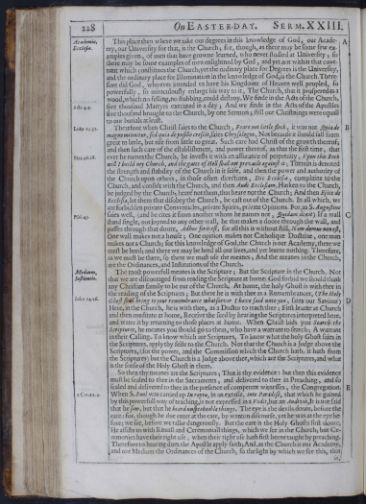 228
On Easter.
Serm. XXIII.
This place then where we take our degrees in this knowledge of God, our Acade-
228
On Easter.
Serm. XXIII.
This place then where we take our degrees in this knowledge of God, our Acade-my, our University for that, Academia,
Ecclesia. is the Church; for, though, as there may be some few ex-
amples given, of men that have growne learned, who never studied at University; so
there may be some examples of men enlightned by God, and yet not within that cove-
nant which constitutes the Church; yet the ordinary place for Degrees is the University,
and the ordinary place for Illumination in the knowledge of God, is the Church. There-
fore did God, who ever intended to have his Kingdome of Heaven well peopled, so
powerfully, so miraculously enlarge his way to it, The Church, that it prospered as a
wood, which no felling, no stubbing, could destroy. We finde in the Acts of the Church,
five thousand Martyrs executed in a day;Acts 4.4. And we finde in the Acts of the Apostles
five thousand brought to the Church, by one Sermon; still our Christnings were equall
to our burials at least. Therefore when Christ saies to the Church, Luke 12.32. Feare not little flock, it was not Quia de
magno minuitur, sed quia de pusillo crescit, saies Chrysologus, Not because it should fall from
great to little, but rise from little to great. Such care had Christ of the growth thereof;
and then such care of the establishment, and power thereof, as that the first time, that
ever he names the Church, Mat. 16.18. he invests it with an assurance of perpetuity, Vpon this Rock
will I build my Church, and the gates of Hell shall not prevaile against it; Therein is denoted
the strength and stability of the Church in it selfe, and then the power and authority of
the Church upon others, in those often directions, Dic Ecclesiæ, complaine to the
Church, and consult with the Church, and then Audi Ecclesiam, Harken to the Church,
be judged by the Church; heare not them, that heare not the Church; And then Ejice de
Ecclesia, let them that disobey the Church, be cast out of the Church. In all which, we
are forbidden private Conventicles, private Spirits, private Opinions. For, as S. Augustine
saies well, Psal. 49. (and he cites it from another whom he names not, Quidam dixit) If a wall
stand single, not joyned to any other wall, he that makes a doore through the wall, and
passes through that doore, Adhuc foris est, for all this is without still, Nam domus non est,
One wall makes not a house; One opinion makes not Catholique Doctrine, one man
makes not a Church; for this knowledge of God, the Church is our Academy, there we
must be bred; and there we may be bred all our lives, and yet learne nothing. Therefore,
as we must be there, so there we must use the meanes; And the meanes in the Church,
are the Ordinances, and Institutions of the Church. The most powerfull meanes is the Scripture;Medium,
Institutio. But the Scripture in the Church. Not
that we are discouraged from reading the Scripture at home: God forbid we should think
any Christian family to be out of the Church. At home, the holy Ghost is with thee in
the reading of the Scriptures; But there he is with thee as a Remembrancer, (The Holy
Ghost shall bring to your remembrance whatsoever I have said unto you, saies our Saviour)
Here, Iohn 14.26. in the Church, he is with thee, as a Doctor to teach thee; First learne at Church
and then meditate at home, Receive the seed by hearing the Scriptures interpreted here,
and water it by returning to those places at home. When Christ bids you Search the
Scriptures, he meanes you should go to them, who have a warrant to search; A warrant
in their Calling. To know which are Scriptures, To know what the holy Ghost saies in
the Scriptures, apply thy selfe to the Church. Not that the Church is a Judge above the
Scriptures, (for the power, and the Commission which the Church hath, it hath from
the Scriptures) but the Church is a Judge above thee, which are the Scriptures, and what
is the sense of the Holy Ghost in them. So then thy meanes are the Scriptures; That is thy evidence: but then this evidence
must be sealed to thee in the Sacraments, and delivered to thee in Preaching, and so
sealed and delivered to thee in the presence of competent witnesses, the Congregation.
When S. Paul was carried up In raptu, 2 Cor. 12.4. in an extasie, into Paradise, that which he gained
by this powerfull way of teaching, is not expressed in a Vidit, but an Audivit, It is not said
that he saw, but that he heard unspeakeable things. The eye is the devils doore, before the
eare: for, though he doe enter at the eare, by wanton discourse, yet he was at the eye be
fore; we see, before we talke dangerously. But the eare is the Holy Ghosts first doore,
He assists us with Rituall and Ceremoniall things, which we see in the Church; but Ce-
remonies have their right use, when their right use hath first beene taught by preaching.
Therefore to hearing does the Apostle apply faith; And, as the Church is our Academy,
and our Medium the Ordinances of the Church, so the light by which we see this, that is,
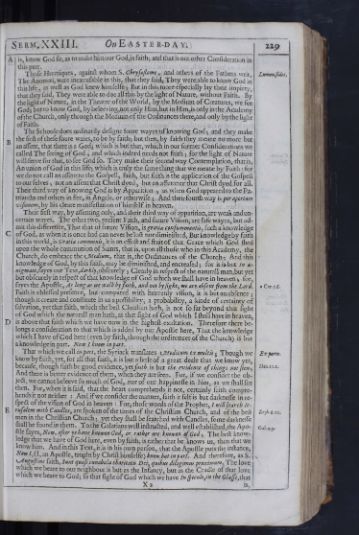 Serm. XXIII.
On Easter-day.
229
is, know God so, as to make him our God, is faith; and that is our other Consideration in
Serm. XXIII.
On Easter-day.
229
is, know God so, as to make him our God, is faith; and that is our other Consideration in
this part. Those Heretiques, against whom S. Chrysostome, and others of the Fathers writ, Lumen, fides.
The Anomæi, were inexcusable in this, that they said, They were able to know God in
this life, as well as God knew himselfe; But in this more especially lay their impiety,
that they said, They were able to doe all this by the light of Nature, without Faith. By
the light of Nature, in the Theatre of the World, by the Medium of Creatures, we see
God; but to know God, by beleeving, not only Him, but in Him, is only in the Academy
of the Church, only through the Medium of the Ordinances there, and only by the light
of Faith. The Schoole does ordinarily designe foure wayes of knowing God; and they make
the first of these foure waies, to be by faith; but then, by faith they meane no more but
an assent, that there is a God; which is but that, which in our former Considerations we
called The seeing of God; and which indeed needs not faith; for the light of Nature
will serve for that, to see God so. They make their second way Contemplation, that is,
An union of God in this life; which is truly the same thing that we meane by Faith: for
we do not call an assent to the Gospell, faith, but faith is the application of the Gospell
to our selves; not an assent that Christ dyed, but an assurance that Christ dyed for all.
Their third way of knowing God is by Apparition; as when God appeared to the Pa-
triarchs and others in fire, in Angels, or otherwise; And their fourth way is per apertam
visionem, by his cleare manifestation of himself in heaven. Their first way, by assenting only, and their third way of apparition, are weak and un-
certain wayes. The other two, present Faith, and future Vision, are safe wayes, but ad-
mit this difference, That that of future Vision, is gratiæ consummantis, such a knowledge
of God, as when it is once had can never be lost nor diminished, But knowledge by faith
in this world, is Gratiæ communis, it is an effect and fruit of that Grace which God shed
upon the whole communion of Saints, that is, upon all those who in this Academy, the
Church, do embrace the Medium, that is, the Ordinances of the Church; And this
knowledge of God, by this faith, may be diminished, and encreased; for it is but In æ-
nigmate, sayes our Text, darkly, obscurely; Clearly in respect of the naturall man, but yet
but obscurely in respect of that knowledge of God which we shall have in heaven; for,
sayes the Apostle, As long as we walk by faith, and not by sight, we are absent from the Lord.2 Cor. 5.6.
Faith is a blessed presence, but compared with heavenly vision, it is but an absence;
though it create and constitute in us a possibility, a probability, a kinde of certainty of
salvation, yet that faith, which the best Christian hath, is not so far beyond that sight
of God which the naturall man hath, as that sight of God which I shall have in heaven,
is above that faith which we have now in the highest exaltation. Therefore there be-
longs a consideration to that which is added by our Apostle here, That the knowledge
which I have of God here (even by faith, through the ordinances of the Church) is but
a knowledge in part. Now I know in part.
That which we call in part, the Syriack translates Modicum ex multis;Ex parte. Though we
know by faith, yet, for all that faith, it is but a little of a great deale that we know yet,
because, though faith be good evidence, yet faith is but the evidence of things not seen; Heb. 11.1.
And there is better evidence of them, when they are seen. For, if we consider the ob-
ject, we cannot beleeve so much of God, nor of our happinesse in him, as we shall see
then. For, when it is said, that the heart comprehends it not, certainly faith compre-
hends it not neither: And if we consider the manner, faith it self is but darknesse in re-
spect of the vision of God in heaven: For, those words of the Prophet, I will search Ie-
rusalem with Candles, are spoken of the times of the Christian Church, Zeph. 1.12. and of the best
men in the Christian Church; yet they shall be searched with Candles, some darknesse
shall be found in them. To the Galatians well instructed, and well established, Gal. 4.9. the Apo-
stle sayes, Now, after ye have knowen God, or rather are knowen of God; The best know-
ledge that we have of God here, even by faith, is rather that he knows us, then that we
know him. And in this Text, it is in his own person, that the Apostle puts the instance,
Now I, (I, an Apostle, taught by Christ himselfe) know but in part. And therefore, as S.
Augustine saith, Sunt quasi cunabula charitatis Dei, quibus diligimus proximum, The love
which we beare to our neighbour is but as the Infancy, but as the Cradle of that love
which we beare to God; so that sight of God which we have In speculo, in the Glasse, that X2 is,
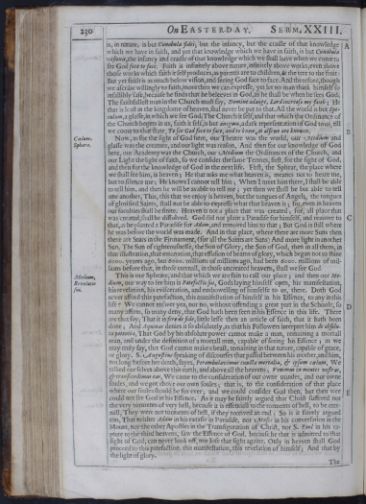 230
On Easter.
Serm. XXIII.
is, in nature, is but Cunabula fidei, but the infancy, but the cradle of that knowledge
230
On Easter.
Serm. XXIII.
is, in nature, is but Cunabula fidei, but the infancy, but the cradle of that knowledge
which we have in faith, and yet that knowledge which we have in faith, is but Cunabula
visionis, the infancy and cradle of that knowledge which we shall have when we come to
see God face to face. Faith is infinitely above nature, infinitely above works, even above
those works which faith it self produces, as parents are to children, & the tree to the fruit:
But yet faith is as much below vision, and seeing God face to face. And therefore, though
we ascribe willingly to faith, more then we can expresse, yet let no man think himself so
infallibly safe, because he finds that he beleeves in God, as he shall be when he sees God;
The faithfullest man in the Church must say, Domine adauge, Lord increase my faith; He
that is least in the kingdome of heaven, shal never be put to that. All the world is but Spe-
culum, a glasse, in which we see God; The Church it self, and that which the Ordinance of
the Church begets in us, faith it self, is but ænigma, a dark representation of God to us, till
we come to that state, To see God face to face, and to know, as also we are knowen. Now, Cœlum,
Sphæra. as for the sight of God here, our Theatre was the world, our Medium and
glasse was the creature, and our light was reason, And then for our knowledge of God
here, our Academy was the Church, our Medium the Ordinances of the Church, and
our Light the light of faith, so we consider the same Termes, first, for the sight of God,
and then for the knowledge of God in the next life. First, the Sphear, the place where
we shall see him, is heaven; He that asks me what heaven is, meanes not to heare me,
but to silence me; He knows I cannot tell him; When I meet him there, I shall be able
to tell him, and then he will be as able to tell me; yet then we shall be but able to tell
one another, This, this that we enjoy is heaven, but the tongues of Angels, the tongues
of glorified Saints, shall not be able to expresse what that heaven is; for, even in heaven
our faculties shall be finite. Heaven is not a place that was created; for, all place that
was created, shall be dissolved. God did not plant a Paradise for himself, and remove to
that, as he planted a Paradise for Adam, and removed him to that; But God is still where
he was before the world was made. And in that place, where there are more Suns then
there are Stars in the Firmament, (for all the Saints are Suns) And more light in another
Sun, The Sun of righteousnesse, the Son of Glory, the Son of God, then in all them, in
that illustration, that emanation, that effusion of beams of glory, which began not to shine
6000. yeares ago, but 6000. millions of millions ago, had been 6000. millions of mil-
lions before that, in those eternall, in those uncreated heavens, shall we see God. This is our Spheare, Medium,
Revelatio
sui. and that which we are fain to call our place; and then our Me-
dium, our way to see him is Patefactio sui, Gods laying himself open, his manifestation,
his revelation, his evisceration, and embowelling of himselfe to us, there. Doth God
never afford this patefaction, this manifestation of himself in his Essence, to any in this
life? We cannot answer yea, nor no, without offending a great part in the Schoole, so
many affirm, so many deny, that God hath been seen in his Essence in this life. There
are that say, That it is fere de fide, little lesse then an article of faith, that it hath been
done; And Aquinas denies it so absolutely, as that his Followers interpret him de absolu-
ta potentia, That God by his absolute power cannot make a man, remaining a mortall
man, and under the definition of a mortall man, capable of seeing his Essence; as we
may truly say, that God cannot make a beast, remaining in that nature, capable of grace,
or glory. S. Augustine speaking of discourses that passed between his mother, and him,
not long before her death, sayes; Perambulavimus cuncta mortalia, & ipsum cœlum, We
talked our selves above this earth, and above all the heavens; Venimus in mentes nostras,
& transcendimus eas, We came to the consideration of our owne mindes, and our owne
soules, and we got above our own soules; that is, to the consideration of that place
where our soules should be for ever; and we could consider God then, but then wee
could not see God in his Essence. As it may be fairely argued that Christ suffered not
the very torments of very hell, because it is essentiall to the torments of hell, to be eter-
nall, They were not torments of hell, if they received an end; So is it fairely argued
too, That neither Adam in his extasie in Paradise, nor Moses in his conversation in the
Mount, nor the other Apostles in the Transfiguration of Christ, nor S. Paul in his ra-
pture to the third heavens, saw the Essence of God, because he that is admitted to that
sight of God, can never look off, nor lose that sight againe. Only in heaven shall God
proceed to this patefaction, this manifestation, this revelation of himself; And that by
the light of glory. The
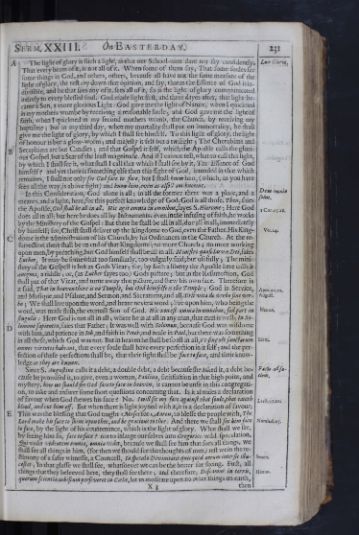 Serm. XXIII.
On Easter-day.
231
The light of glory is such a light, as that our School-men dare not say confidently, Lux Gloria.
Serm. XXIII.
On Easter-day.
231
The light of glory is such a light, as that our School-men dare not say confidently, Lux Gloria.
That every beam of it, is not all of it. When some of them say, That some soules see
some things in God, and others, others, because all have not the same measure of the
light of glory, the rest cry down that opinion, and say, that as the Essence of God is in-
divisible, and he that sees any of it, sees all of it, so is the light of glory communicated
intirely to every blessed soul. God made light first, and three dayes after, that light be-
came a Sun, a more glorious Light: God gave me the light of Nature, when I quickned
in my mothers wombe by receiving a reasonable soule; and God gave me the light of
faith, when I quickned in my second mothers womb, the Church, by receiving my
baptisme; but in my third day, when my mortality shall put on immortality, he shall
give me the light of glory, by which I shall see himself. To this light of glory, the light
of honour is but a glow-worm; and majesty it self but a twilight; The Cherubims and
Seraphims are but Candles; and that Gospel it self, which the Apostle calls the glori-
ous Gospel, but a Star of the least magnitude. And if I cannot tell, what to call this light,
by which I shall see it, what shall I call that which I shall see by it, The Essence of God
himself? and yet there is something else then this sight of God, intended in that which
remaines, I shall not only see God face to face, but I shall know him, (which, as you have
seen all the way, is above sight) and know him, even as also I am knowne. In this Consideration, God alone is all; in all the former there was a place, Deus omnia
solus. and a
meanes, and a light; here, for this perfect knowledge of God, God is all those. Then, saies
the Apostle, God shall be all in all. Hic agit omnia in omnibus, sayes S. Hierome;1 Cor. 15.28. Here God
does all in all; but here he does all by Instruments; even in the infusing of faith, he works
by the Ministery of the Gospel: But there he shall be all in all, doe all in all, immediately
by himself; for, Christ shall deliver up the Kingdome to God, even the Father.Ver. 24. His King-
dome is the administration of his Church, by his Ordinances in the Church. At the re-
surrection there shall be an end of that Kingdome; no more Church; no more working
upon men, by preaching, but God himself shall be all in all. Ministri quasi larvæ Dei, saies
Luther. It may be somewhat too familiarly, too vulgarly said, but usefully; The mini-
stery of the Gospell is but as Gods Vizar; for, by such a liberty the Apostle here calls it
ænigma, a riddle; or, (as Luther sayes too) Gods picture; but in the Resurrection, God
shall put ofoff that Vizar, and turne away that picture, and shew his own face. Therefore is
it said, That in heaven there is no Temple, but God himselfe is the Temple; God is Service, Apoc. 21.22.
and Musique, and Psalme, and Sermon, and Sacrament, and all.August. Erit vita de verbo sine ver-
bo; We shall live upon the word, and heare never a word; live upon him, who being the
word, was made flesh, the eternall Son of God.Hieron. Hîc non est omnia in omnibus, sed pars in
singulis: Here God is not all in all; where he is at all in any man, that man is well; In So-
lomone sapientia, saies that Father; It was well with Solomon, because God was wisdome
with him, and patience in Iob, and faith in Peter, and zeale in Paul, but there was something
in all these, which God was not. But in heaven he shall be so all in all, Idem. Vt singuli sanctorum
omnes virtutes habeant, that every soule shall have every perfection in it self; and the per-
fection of these perfections shall be, that their sight shall be face to face, and their know-
ledge as they are known. Since S. Augustine calls it a debt, a double debt, a debt because she asked it, Facie ad fa-
ciem. a debt be-
cause he promised it, to give, even a woman, Paulina, satisfaction in that high point, and
mystery, how we should see God face to face in heaven, it cannot be unfit in this congregati-
on, to aske and answer some short questions concerning that. Is it alwaies a declaration
of favour when God shewes his face? No. I will set my face against that soule, Levit. 17.10. that eateth
blood, and cut him off. But when there is light joyned with it, it is a declaration of favour;
This was the blessing that God taught Moses for Aaron, to blesse the people with, The
Lord make his face to shine upon thee, and be gracious to thee.Numb. 6.25. And there we shall see him face
to face, by the light of his countenance, which is the light of glory. What shall we see,
by seeing him so, face to face? not to inlarge our selves into Gregories wild speculation,
Qui videt videntem omnia, oninia videt, because we shall see him that sees all things, we
shall see all things in him, (for then we should see the thoughts of men) rest we in the te-
stimony of a safer witnesse, a Councell, Senon. In speculo Divinitatis quicquid eorum intersit illu-
cescet; In that glasse we shall see, whatsoever we can be the better for seeing. First, all
things that they beleeved here, they shall see there; and therefore, Discamus in terris,
Hieron. quorum scientia nobiscum perseveret in Cælis, let us meditate upon no other things on earth, X3 then
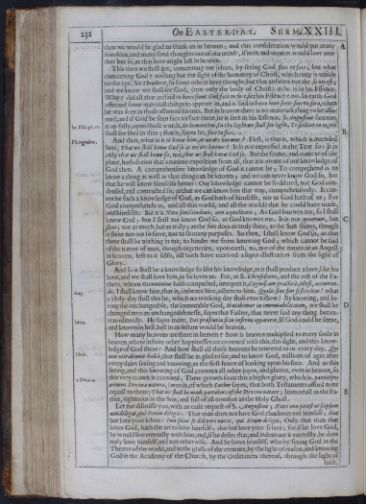 232
On Easter.
Serm. XXIII.
then we would be glad to think on in heaven; and this consideration would put many
232
On Easter.
Serm. XXIII.
then we would be glad to think on in heaven; and this consideration would put many
frivolous, and many fond thoughts out of our minde, if men and women would love ano-
ther but so, as that love might last in heaven. This then we shall get, concerning our selves, by seeing God face to face; but what
concerning God? nothing but the sight of the humanity of Christ, which only is visible
to the eye. So Theodoret, so some others have thought; but that answers not the sicuti est;
and we know we shall see God, (not only the body of Christ) as he is in his Essence.
Why? did all that are said to have seene God face to face, fee his Essence? no. In earth God
assumed some materiall things to appeare in, and is said to have been seene face to face, when
he was seen in those assumed formes. But in heaven there is no materiall thing to be assu-
med, and if God be seen face to face there, he is seen in his Essence. S. Augustine summes
it up fully, In Psal. 36.10. upon those words, In lumine tuo, In thy light we shall see light, Te scilicet in te, we
shall see thee in thee; that is, sayes he, face to face. And then, Vt cognitus. what is it to know him, as we are knowne? First, is that it, which is intended
here, That we shall know God so as we are known? It is not expressed in the Text so: It is
only that we shall know so; not, that we shall know God so. But the frame, and context of the
place, hath drawn that unanime exposition from all, that it is meant of our knowledge of
God then. A comprehensive knowledge of God it cannot be; To comprehend is to
know a thing as well as that thing can be known; and we can never know God so, but
that he will know himselfe better: Our knowledge cannot be so dilated, nor God con-
densed, and contracted so, as that we can know him that way, comprehensively. It can-
not be such a knowledge of God, as God hath of himselfe, nor as God hath of us; For
God comprehends us, and all this world, and all the worlds that he could have made,
and himselfe. But it is Nota similitudinis, non æqualitatis; As God knowes me, so I shall
know God; but I shall not know God so, as God knowes me. It is not quantum, but
sicut; not as much, but as truly; as the fire does as truly shine, as the Sun shines, though
it shine not out so farre, nor to so many purposes. So then, I shall know God so, as that
there shall be nothing in me, to hinder me from knowing God; which cannot be said
of the nature of man, though regenerate, upon earth, no, nor of the nature of an Angell
in heaven, left to it selfe, till both have received a super-illustration from the light of
Glory. And so it shall be a knowledge so like his knowledge, as it shall produce a love, like his
love, and we shall love him, as he loves us. For, as S. Chrysostome, and the rest of the Fa-
thers, whom Oecumenius hath compacted, interpret it, Cognoscam practicè, idest, accurren-
do, I shall know him, Aug. that is, imbrace him, adhere to him. Qualis sine fine festivitas! what
a Holy-day shall this be, which no working day shall ever follow! By knowing, and lo-
ving the unchangeable, the immutable God, Mutabimur in immutabilitatem, we shall be
changed into an unchangeablenesse, sayes that Father, that never said any thing but ex-
traordinarily. He sayes more, Idem. Dei præsentia si in inferno appareret, If God could be seene,
and known in hell, hell in an instant would be heaven. How many heavens are there in heaven? how is heaven multiplied to every soule in
heaven, where infinite other happinesses are crowned with this, this fight, and this know-
ledge of God there? And how shall all those heavens be renewed to us every day, Qui
non mirabimur hodiè, Idem. that shall be as glad to see, and to know God, millions of ages after
every daies seeing and knowing, as the first houre of looking upon his face. And as this
seeing, and this knowing of God crownes all other joyes, and glories, even in heaven, so
this very crown is crowned;2 Pet. 1.4. There growes from this a higher glory, which is, participes
erimus Divinæ naturæ, (words, of which Luther sayes, that both Testaments afford none
equall to them) That we shall be made partakers of the Divine nature; Immortall as the Fa-
ther, righteous as the Son, and full of all comfort as the Holy Ghost. Let me dismisse you, with an easie request of S. Augustine; Fieri non potest ut seipsum
non diligat, qui Deum diligit; That man does not love God, that loves not himself; doe
but love your selves: Imo solus se diligere novit, qui Deum diligit, Only that man that
loves God, hath the art to love himself; doe but love your selves; for if he love God,
he would live eternally with him, and, if he desire that, and indeavour it earnestly, he does
truly love himself, and not otherwise. And he loves himself, who by seeing God in the
Theatre of the world, and in the glasse of the creature, by the light of reason, and knowing
God in the Academy of the Church, by the Ordinances thereof, through the light of faith, faith,
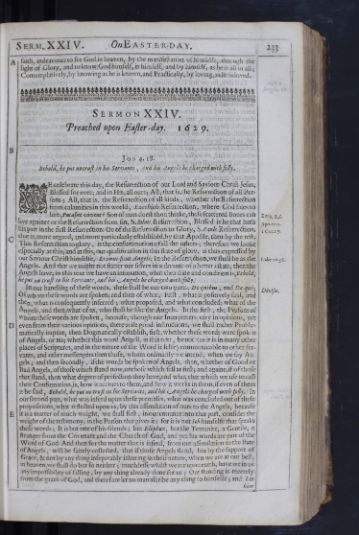 Serm. XXIV.
On Easter-day.
233
faith, indeavours to see God in heaven, by the manifestation of himselfe, through the
Serm. XXIV.
On Easter-day.
233
faith, indeavours to see God in heaven, by the manifestation of himselfe, through the
light of Glory, and to know God himself, in himself, and by himself, as he is all in all;
Contemplatively, by knowing as he is known, and Practically, by loving, as he is loved.
Sermon XXIV.
Preached upon Easter-day. 1629.
Job 4. 18.
Behold, he put no trust in his Servants, And his Angels he charged with folly.
WE celebrate this day, the Resurrection of our Lord and Saviour Christ Jesus,
Blessed for ever; and in His, all ours; All, that is, the Resurrection of all Per-
sons; All, that is, the Resurrection of all kinds, whether the Resurrection
from calamities in this world, Ezechiels Resurrection, where God saies to
Ezek. 8.6. him, Putasne vivent? Son of man doest thou thinke, these scattered Bones can
Apo. 20.5.
1 Cor. 15. live againe? or the Resurrection from sin, S. Iohns Resurrection, Blessed is he that hath
his part in the first Resurrection: Or of the Resurrection to Glory, S. Pauls Resurrection,
that is, more argued, and more particularly established, by that Apostle, then by the rest.
This Resurrection to glory, is the consummation of all the others; therefore we looke
especially at this; and in this, our qualification in this state of glory, is thus expressed by
Luke 20.36. our Saviour Christ himselfe, Erimus sicut Angeli, In the Resurrection, we shall be as the
Angels. And that we might not flatter our selves in a dreame of a better estate, then the
Angels have, in this text we have an intimation, what their state and condition is, Behold,
he put no trust in his Servants, and his Angels he charged with folly.
In our handling of these words, these shall be our two parts; De quibus, and De quo;
Divisio. Of whom these words are spoken, and then of what; First, what is positively said, and
then, what is consequently inferred; what proposed, and what concluded; what of the
Angels, and then, what of us, who shall be like the Angels. In the first, the Persons of
whom these words are spoken, because, though our Interpreters vary in opinions, yet
even from their various opinions, there arise good instructions, we shall rather Proble-
matically inquire, then Dogmatically establish, first, whether these words were spoken
of Angels, or no; whether this word Angell, in this text, be not (as it is in many other
places of Scriptures, and in the nature of the Word it selfe) communicable to other ser-
vants, and other messengers then those, whom ordinarily we intend, when we say An-
gels; and then secondly, if the words be spoken of Angels, then, whether of Good or
Bad Angels, of those which stand now, or those which fell at first; and againe, if of those
that stand, then what degree of perfection they have, and what that which we use to call
their Confirmation, is, how it accrues to them, and how it works in them, if even of them
it be said, Behold, he put no trust in his Servants, and his Angels he charged with folly. In
our second part, what was inferd upon these premisses, what was concluded out of these
propositions, what reflected upon us, by this assimilation of ours to the Angels, because
it is a matter of much weight, we shall first, in our entrance into that part, consider the
weight of the testimony, in the Person that gives it; for it is not Iob himselfe that speaks
these words; It is but one of his friends; but Elephaz, but the Temanite, a Gentile, a
stranger from the Covenant and the Church of God, and yet his words are part of the
Word of God. And then for the matter that is inferd, from our assimilation to the state
of Angels, will be fairely collected, that if those Angels stand, but by the support of
Grace, & not by any thing inseparably inhering in their nature, when we are at our best,
in heaven, we shall do but so neither; much lesse whilst we are upon earth, have we in us
any impossibility of falling, by any thing already done for us; Our standing is meerely
from the grace of God, and therefore let no man ascribe any thing to himselfe; and Let him
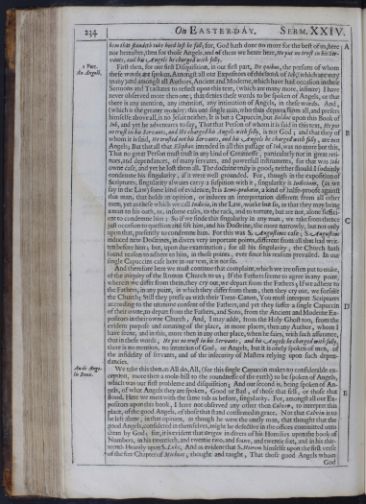 234
On Easter-day.
Serm. XXIV.
him that standeth take heed lest he fall; for, God hath done no more for the best of us, here
234
On Easter-day.
Serm. XXIV.
him that standeth take heed lest he fall; for, God hath done no more for the best of us, here
nor hereafter, then for those Angels, and of them we heare here, He put no trust in his Ser-
vants, and his Angels he charged with folly.
1 Part.
An Angeli. First then, for our first Disquisition, in our first part, De quibus, the persons of whom
these words are spoken. Amongst all our Expositors of this book of Iob, (which are very
many) and amongst all Authors, Ancient and Moderne, which have had occasion in their
Sermons and Tractates to reflect upon this text, (which are many more, infinite) I have
never observed more then one, that denies these words to be spoken of Angels, or that
there is any mention, any intention, any intimation of Angels, in these words. And,
(which is the greater wonder) this one single man, who thus departs from all, and prefers
himselfe above all, is no Jesuit neither; It is but a Capuccin, but Bolduc upon this Book of
Iob, and yet he adventures to say, That that Person of whom it is said in this text, He put
no trust in his Servants, and He charged his Angels with folly, is not God; and that they of
whom it is said, He trusted not his Servants, and his Angels he charged with folly, are not
Angels; But that all that Eliphaz intended in all this passage of Iob, was no more but this,
That no great Person must trust in any kind of Greatnesse, particularly not in great reti-
nues, and dependances, of many servants, and powerfull instruments, for that was Iobs
owne case, and yet he lost them all. The doctrine truly is good; neither should I sodainly
condemne his singularity, if it were well grounded. For, though in the exposition of
Scriptures, singularity alwaies carry a suspition with it, singularity is Indicium, (as we
say in the Law) some kind of evidence, It is Semi-probatio, a kind of halfe-proofe against
that man, that holds an opinion, or induces an interpretation different from all other
men; yet as these which we call Indicia, in the Law, worke but so, as that they may bring
a man to his oath, or, in some cases, to the rack, and to torture, but are not, alone suffici-
ent to condemne him; So if we finde this singularity in any man, we take from thence
just occasion to question and sift him, and his Doctrine, the more narrowly, but not only
upon that, presently to condemne him. For this was S. Augustines case; S. Augustine
induced new Doctrines, in divers very important points, different from all that had writ-
ten before him; but, upon due examination, for all his singularity, the Church hath
found reason to adhere to him, in those points, ever since his reasons prevailed. In our
single Capuccins case here in our text, it is not so.
And therefore here we must continue that complaint, which we are often put to make,
of the iniquity of the Roman Church to us; If the Fathers seeme to agree in any point,
wherein we differ from them, they cry out, we depart from the Fathers; If we adhere to
the Fathers, in any point, in which they differ from them, then they cry out, we forsake
the Church; Still they presse us with their Trent-Canon, You must interpret Scriptures
according to the unanime consent of the Fathers, and yet they suffer a single Capuccin
of their owne, to depart from the Fathers, and Sons, from the Ancient and Moderne Ex-
positors in their owne Church, And, I may adde, from the Holy Ghost too, from the
evident purpose and meaning of the place, in more places, then any Author, whom I
have seene, and in this, more then in any other place, when he saies, with such assurance,
that in these words, He put no trust in his Servants, and his Angels he charged with folly,
there is no mennon, no intention of God, or Angels, but it is onely spoken of men, of
the infidelity of servants, and of the insecurity of Masters relying upon such depen-
dancies.
Ande Ange-
lis Bonis. We take this then, as All do, All, (for this single Capuccin makes no considerable ex-
ception, more then a mole-hill to the roundnesse of the earth) to be spoken of Angels,
which was our first probleme and disquisition; And our second is, being spoken of An-
gels, of what Angels they are spoken, Good or Bad, of those that fell, or those that
stood. Here we meet with the same rub as before, singularity. For, amongst all our Ex-
positors upon this book, I have not observed any other then Calvin, to interpret this
place, of the good Angels, of those that stand confirmed in grace. Not that Calvin is to
be left alone, in that opinion, as though he were the onely man, that thought that the
good Angels, considered in themselves, might be defective in the offices committed unto
them by God; for, it is evident that Origen in divers of his Homilies upon the book of
Numbers, in his twentieth, and twentie two, and foure, and twentie sixt, and in his thir-
teenth Homily upon S. Luke, And as evident that S. Hierom himselfe upon the first verse
of the sixt Chapter of Micheas, thought and taught, That those good Angels whom God
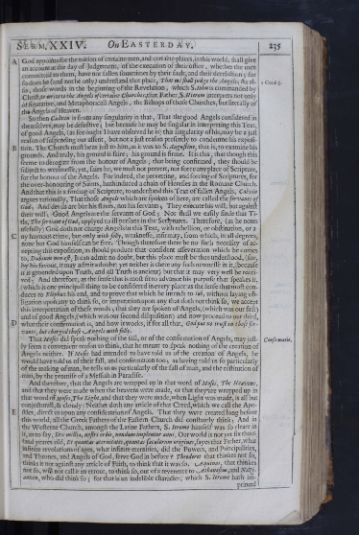 Serm. XXIV.
On Easter-day.
235
God appoints for the tuition of certaine men, and certaine places, in this world, shall give
Serm. XXIV.
On Easter-day.
235
God appoints for the tuition of certaine men, and certaine places, in this world, shall give
an account at the day of Judgement, of the execution of their office, whether the men
committed to them, have not fallen sometimes by their fault, and their dereliction; for
1 Cor. 6.3. so does he (and not he only) understand that place, That we shall judge the Angels; As al-
so those words in the beginning of the Revelation, which S. Iohn is commanded by
Christ, to write to the Angels of certaine Churches, that Father, S. Hierom interprets not only
of figurative, and Metaphoricall Angels, the Bishops of those Churches, but literally of
the Angels of Heaven.
So then Calvin is from any singularity in that, That the good Angels considered in
themselves, may be defective; but because he may be singular in interpreting this Text,
of good Angels, (as for ought I have observed he is) this singularity of his, may be a just
reason of suspending our assent, but not a just reason presently to condemne his exposi-
tion. The Church must beas just to him, as it was to S. Augustine, that is, to examine his
grounds. And truly, his ground is faire; his ground is firme. It is this, that though this
seeme to derogato from the honour of Angels, that being confirmed, they should be
subject to weaknesse, yet, saies he, we must not pervert, nor force any place of Scripture,
for the honour of the Angels. For indeed, the perverting, and forcing of Scriptures, for
the over-honouring of Saints, hath induced a chain of Heresies in the Romane Church.
And that this is a forcing of Scripture, to understand this Text of fallen Angels, Calvin
argues rationally, That those Angels which are spoken of here, are called the servants of
God; And devils are but his slaves, not his servants; They execute his will, but against
their will; Good Angels are the servants of God; Nor shall we easily finde that Ti-
tle, The servant of God, applyed to ill persons in the Scriptures. Therefore, (as he notes
usefully) God doth not charge Angels in this Text, with rebellion, or obstination, or a-
ny haynous crime, but only with folly, weaknesse, infirmity, from which, in all degrees,
none but God himself can be free. Though therefore there be no such necessity of ac-
cepting this exposition, as should produce that confident asseveration which he comes
to, Dubium non est, It can admit no doubt, but this place must be thus understood, (for,
by his favour, it may admit a doubt) yet neither is there any such newnesse in it, (because
it is grounded upon Truth, and all Truth is ancient) but that it may very well be recei-
ved; And therefore, as the sense that is most fit to advance his purpose that speakes it,
(which is one principall thing to be considered in every place) as the sense that most con-
duces to Eliphaz his end, and to prove that which he intends to Iob, without laying ob-
ligation upon any to think so, or imputation upon any that doth not think so, we accept
this interpretation of these words; that they are spoken of Angels, (which was our first)
and of good Angels, (which was our second disquisition) and now proceed to our third,
what their confirmation is, and how it works, if for all that, God put no trust in those ser-
vants, but charged those Angels with folly.
Confirmatio. That Moses did speak nothing of the fall, or of the confirmation of Angels, may just-
ly seem a convenient reason to think, that he meant to speak nothing of the creation of
Angels neither. If Moses had intended to have told us of the creation of Angels, he
would have told us of their fall, and confirmation too; as having told us so particularly
of the making of man, he tells us as particularly of the fall of man, and the restitution of
man, by the promise of a Messiah in Paradise.
And therefore, that the Angels are wrapped up in that word of Moses, The Heavens,
and that they were made when the heavens were made, or that they are wrapped up in
that word of Moses, The Light, and that they were made, when Light was made, is all but
conjecturall, & cloudy: Neither doth any article of that Creed, which we call the Apo-
stles, direct us upon any consideration of Angels. That they were created long before
this world, all the Greek Fathers of the Eastern Church did constandy think; And in
the Westerne Church, amongst the Latine Fathers, S. Ierome himself was so cleare in
it, as to say, Sex millia, nostri orbis, nondum implentur anni, Our world is not yet six thou-
sand yeares old, Et quantas aternitates, quantas sæculorum origines, sayes that Father, what
infinite revolutions of ages, what infinite eternities, did the Powers, and Principalities,
and Thrones, and Angels of God, serve God in before? Theodoret that thinkes not so,
thinks it not against any article of Faith, to think that it was so. Aquinas, that thinkes
not so, will not call it an errour, to think so, out of a reverence to Athanasius, and Nazi-
anzen, who did think so; for that is an indelible character, which S. Ierome hath im printed
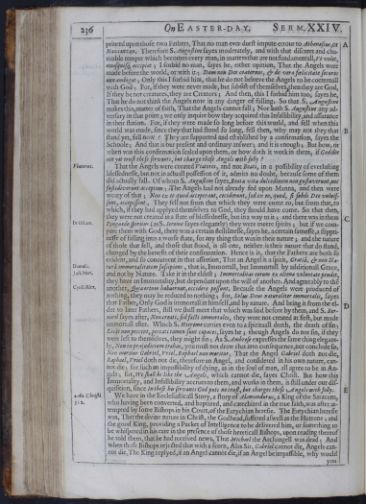 236
On Easter-day.
Serm. XXIV.
printed upon those two Fathers, That no man ever durst impute errour to Athanasius, or
236
On Easter-day.
Serm. XXIV.
printed upon those two Fathers, That no man ever durst impute errour to Athanasius, or
Nazianzen. Therefore S. Augustine sayes moderately, and with that discreet and cha-
ritable temper which becomes every man, in matters that are not fundamentall, Vt volet,
unusquisunusquisque accipiat; I forbid no man, sayes he, either opinion, That the Angels were
made before the world, or with it; Dum non Deo coæternos, & de vera fœlicitate securos
non ambigat; Only this I forbid him, that he do not beleeve the Angels to be coeternall
with God; For, if they were never made, but subsist of themselves, then they are God,
If they be not creatures, they are Creators; And then, this I forbid him too, sayes he,
That he do not think the Angels now in any danger of falling. So that S. Augustine
makes this, matter of faith, That the Angels cannot fall; Nor hath S. Augustine any ad-
versary in that point; we only inquire how they acquired this Infallibility, and assurance
in their station. For, if they were made so long before this world, and fell when this
world was made, since they that had stood so long, fell then, why may not they that
stand yet, fall now? They are supported and established by a confirmation, sayes the
Schoole; And that is our present and ordinary answer; and it is enough; But how, or
when was this confirmation sealed upon them, or how doth it work in them, if God doe
not yet trust these servants, but charge these Angels with folly?
Viatores. That the Angels were created Viatores, and not Beati, in a possibility of everlasting
blessednesse, but not in actuall possession of it, admits no doubt, because some of them
did actually fall. Of whom S. Augustine sayes, Beatæ vitæ dulcedinem nongustaverunt, nec
fastidiverunt acceptam; The Angels had not already fed upon Manna, and then were
weary of that; Non ex eo quod acceperant, ceciderunt, sed ex eo, quod, si subdi Deo voluis-
sent, accepissent, They fell not from that which they were come to, but from that, to
which, if they had applyed themselves to God, they should have come. So that then,
they were not created in a state of blessednesse, but in a way to it; and there was in them
In Oscam. Pinguedo spiritus (as S. Ierome sayes elegantly) they were meere spirits; but if we com-
pare them with God, there was a certain fleshlinesse, sayes he, a certain fatnesse, a slippri-
nesse of falling into a worse state, for any thing that was in their nature; and the nature
of those that fell, and those that stood, is all one, neither is their nature that do stand,
changed by the benefit of their confirmation. Hence is it, that the Fathers are both so
evident, and so concurrent in that assertion, That an Angel is a spirit, Gratiâ, & non Na-
turà immortalitatem suscipiens,Damasc.
Just. Mart. that is, Immortall, but Immortall by additionall Grace,
and not by Nature. Take it in the eldest; Immortalitas eorum ex aliena voluntate pendet,
they have an Immortality, but dependant upon the will of another. And agreeably to the
another, Cyrill Alex. Quia ortum habuerunt, occidere possunt, Because the Angels were produced of
nothing, they may be reduced to nothing; for, Solus Deus naturaliter immortalis, sayes
that Father, Only God is immortall in himself, and by nature. And bring it from the el-
der to later Fathers, still we shall meet that which was said before by them, and S. Ber-
nard sayes after, Non creati, sed facti immortales, they were not created at first, but made
immortall after. Which S. Hierome carries even to a spirituall death, the death of sin;
Licèt non peccent, peccati tamen sunt capaces, sayes he; though Angels do not sin, if they
were left to themselves, they might fin; As S. Ambrose expresses the same thing elegant-
ly, Non in præjudicium trahas, you must not draw that into consequence, nor conclude so,
Non moritur Gabriel, Vriel, Raphael non moritur, That the Angel Gabriel doth not die,
Raphael, Vriel doth not die, therefore an Angel, and considered in his own nature, can-
not die; for such an impossibility of dying, as in the soul of man, all agree to be in An-
gels; for, We shall be like the Angels, which cannot die, sayes Christ. But how this
Immortality, and Infallibility accrues to them, and works in them, is still under our dis-
quisition, since In these his servants God puts no trust, but charges these Angels with folly.
An. Christi
512. We have in the Ecclesiasticall Story, a story of Alamandurus, a King of the Saracens,
who having been converted, and baptized, and catechized in the true faith, was after at-
tempted by some Bishops in his Court, of the Eutychian heresie. The Eutychian heresie
was, That the divine nature in Christ, the Godhead, suffered aswell as the Humane; and
the good King, providing a Packet of Intelligence to be delivered him, or something to
be whispered in his eare in the presence of those hereticall Bishops, upon reading thereof
he told them, that he had received news, That Michael the Archangell was dead; And
when those Bishops rejected that with a scorn, Alas Sir, Gabriel cannot die, Angels can-
not die, The King replyed, if an Angel cannot die, if an Angel be impassible, why would you
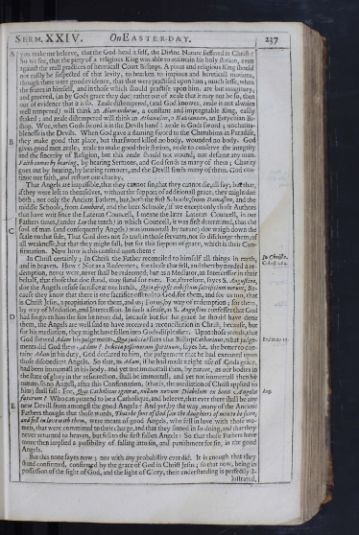 237
Serm. XXIV.
On Easter-day.
237
you make me beleeve, that the God-head it self, the Divine Nature suffered in Christ?
237
Serm. XXIV.
On Easter-day.
237
you make me beleeve, that the God-head it self, the Divine Nature suffered in Christ?
So we see, that the piety of a religious King was able to maintain his holy station, even
against the reall practices of hereticall Court Bishops. A pious and religious King should
not easily be suspected of that levity, to hearken to impious and hereticall motions,
though there were good evidence, that that were practised upon him; much lesse, when
the feares in himself, and in those which should practise upon him, are but imaginary,
and proceed, (as by Gods grace they doe) rather out of zeale that it may not be so, then
out of evidence that it is so. Zeale distempered, (and God knowes, zeale is not alwaies
well tempered) will think an Alamandurus, a constant and impregnable King, easily
shaked; and zeale distempered will think an Athanasius, a Nazianzen, an Eutychian Bi-
shop. Woe, when Gods sword is in the Devils hand! zeale is Gods sword; uncharita-
blenesse is the Devils. When God gave a flaming sword to the Cherubims in Paradise,
they make good that place, but that sword killed no body, wounded no body. God
gives good men zeale; zeale to make good their station, zeale to conserve the integrity
and the sincerity of Religion, but this zeale should not wound, not defame any man.
Faith comes by hearing, by hearing Sermons, and God sends us many of them; Charity
goes out by hearing, by hearing rumours, and the Devill sends many of them. God con-
tinue our faith, and restore our charity.
That Angels are impassible, that they cannot sin, that they cannot die, all say; but that,
if they were left to themselves, without the support of additionall grace, they might doe
both; not only the Ancient Fathers, but, both the first Schoole, from Damascen, and the
middle Schoole, from Lombard, and the later Schoole, (if we except only those Authors
that have writ since the Lateran Councell, I meane the later Lateran Councell, in our
Fathers times, (under Leo the tenth) in which Councell, it was first determined, that the
soul of man (and consequently Angels) was immortall by nature) doe waigh down the
scale on that side, That God does not so trust in those servants, nor so discharge them, of
all weaknesse, but that they might fall, but for this support of grace, which is their Con-
firmation. Now how is this conferd upon them?
In Christ certainly; In Christ the Father reconciled to himself all things in earth,
In Christo.
Coloss. 1.12. and in heaven. How? Not as a Redeemer; for those that fell, and thereby needed a re-
demption, never were, never shall be redeemed; but as a Mediator, an Intercessor in their
behalf, that those that doe stand, may stand for ever. For, therefore, sayes S. Augustine,
doe the Angels refuse sacrifice at our hands, Quia & ipsis nohiscum sacrificium norunt, Be-
cause they know that there is one sacrifice offered to God, for them, and for us too, that
is Christ Jesus, a propitiation for them, and us; For us, by way of redemption; for them,
by way of Mediation, and Intercession. In such a sense, as S. Augustine confesses that God
had forgiven him the sins he never did, because but for his grace he should have done
them, the Angels are well said to have received a reconciliation in Christ, because, but
for his mediation, they might have fallen into Gods displeasure. Upon those words, that
Eechlus. 27.12. God shewed Adam his judgements, Quæ judicia? saies that Bishop Catharinus, what judge-
ments did God shew Adam? Iudicia pessimorum spirituum, sayes he, the better to con-
taine Adam in his duty, God declared to him, the judgement that he had executed upon
those disobedient Angels. So that, as Adam, if he had made a right use of Gods grace,
had been immortall in his body, and yet not immortall then, by nature, as our bodies in
the state of glory in the resurrection, shall be immortall, and yet not immortall then by
nature; so no Angell, after this Confirmation, (that is, the mediation of Christ applied to
Aug. him) shall fall: For, Quis Catholicus ignorat, nullum novum Diabolum ex bonis Angelis
futurum? Who can pretend to be a Catholique, and beleeve, that ever there shall be any
new Devill from amongst the good Angels? And yet, by the way, many of the Ancient
Fathers thought that those words, That the sons of God saw the daughters of men to be faire,
and fell in love with them, were meant of good Angels, who fell in love with those wo-
men, that were committed to their charge, and that they sinned in so doing, and that they
never returned to heaven, but fell to the first fallen Angels: So that those Fathers have
more then implied a possibility of falling into sin, and punishment for sin, in the good
Angels.
But this none sayes now; nor with any probability ever did. It is enough that they
stand confirmed, confirmed by the grace of God in Christ Jesus; so that now, being in
possession of the sight of God, and the light of Glory, their understanding is perfectly il-
lustrated,
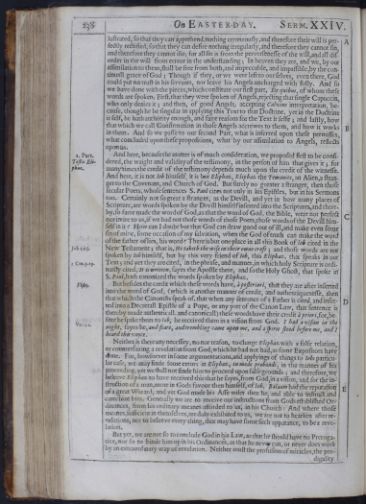 238
On Easter-day.
Serm. XXIV.
lustrated, so that they can apprehend nothing erroneously, and therefore their will is per-
238
On Easter-day.
Serm. XXIV.
lustrated, so that they can apprehend nothing erroneously, and therefore their will is per-fectly rectified, so that they can desire nothing irregularly, and therefore they cannot sin,
and therefore they cannot die; for all sin is from the perversenesse of the will, and all dis-
order in the will from errour in the understanding; In heaven they are, and we, by our
assimilation to them, shall be free from both, and impeccable, and impassible, by the con-
tinuall grace of God; Though if they, or we were left to our selves, even there, God
could put no trust in his servants, nor leave his Angels uncharged with folly. And so
we have done with the pieces, which constitute our first part, De quibus, of whom these
words are spoken; First, that they were spoken of Angels, rejecting that single Capuccin,
who only denies it; and then, of good Angels, accepting Calvins interpretation, be-
cause, though he be singular in applying this Text to that Doctrine, yet in the Doctrine
it self, he hath authority enough, and faire reasons for the Text it selfe; and lastly, how
that which we call Confirmation in those Angels accrewes to them, and how it works
in them. And so we passe to our second Part, what is inferred upon these premisses,
what concluded upon these propositions, what by our assimilation to Angels, reflects
upon us.
2. Part.
Testis Eli-
phaz. And here, because the matter is of much consideration, we proposed first to be consi-
dered, the waight and validity of the testimony, in the person of him that gives it; for
many times the credit of the testimony depends much upon the credit of the witnesse.
And here, it is not Iob himself, it is but Eliphaz, Eliphaz the Temanite, an Alien, a stran-
ger to the Covenant, and Church of God. But surely no greater a stranger, then those
secular Poets, whose sentences S. Paul cites not only in his Epistles, but in his Sermons
too. Certainly not so great a stranger, as the Devill, and yet in how many places of
Scripture, are words spoken by the Devill himself inserted into the Scriptures, and there-
by, so farre made the word of God, as that the word of God, the Bible, were not perfect
nor intire to us, if we had not those words of those Poets, those words of the Devill him-
self in it? How can I doubt but that God can draw good out of ill, and make even some
sin of mine, some occasion of my salvation, when the God of truth can make the word
of the father of lies, his word? There is but one place in all this Book of Iob cited in the
New Testament;Job 5.13. that is, He taketh the wise in their owne craft; and those words are not
spoken by Iob himself, but by this very friend of Iob, this Eliphaz, that speaks in our
Text;1 Cor. 3.19. and yet they are cited, in the phrase, and manner, in which holy Scripture is ordi-
narily cited, It is written, sayes the Apostle there, and so the Holy Ghost, that spoke in
S. Paul, hath canonized the words spoken by Eliphaz.
Visio. But besides the credit which these words have, à posteriori, that they are after inserted
into the word of God, (which is another manner of credit, and authentiquenesse, then
that which the Canonists speak of, that when any sentence of a Father is cited, and inser-
ted into a Decretall Epistle of a Pope, or any part of the Canon Law, that sentence is
thereby made authenticall, and canonicall) these words have their credit à priori, for, be-
fore be spake them to Iob, he received them in a vision from God. I had a vision in the
night,Ver. 12. sayes he, and feare, and trembling came upon me, and a spirit stood before me, and I
heard this voyce.
Neither is there any necessity, no nor reason, to charge Eliphaz with a false relation,
or counterfaiting a revelation from God, which he had not had, as some Expositors have
done. For, howsoever in some argumentations, and applyings of things to Iobs particu-
lar case, we may finde some errors in Eliphaz, in modo probandi, in the manner of his
proceeding, yet we shall not finde him to proceed upon false grounds; and therefore, we
beleeve Eliphaz to have received this that he sayes, from God, in a vision, and for the in-
struction of a man, more in Gods favour then himself, of Iob. Balaam had the reputation
of a great Wizard, and yet God made his Asse wiser then he, and able to instruct and
catechize him. Generally we are to receive our instructions from Gods established Or-
dinances, from his ordinary meanes afforded to us, in his Church: And where those
meanes, sufficient in themselves, are duly exhibited to us, we are not to hearken after re-
velations, nor to beleeve every thing, that may have some such apparance, to be a reve-
lation.
But yet, we are not so to conclude God in his Law, as that he should have no Preroga-
tive, nor so to binde him up in his Ordinances, as that he never can, or never does work
by an extraordinary way of revelation. Neither must the profusion of miracles, the pro-
digality
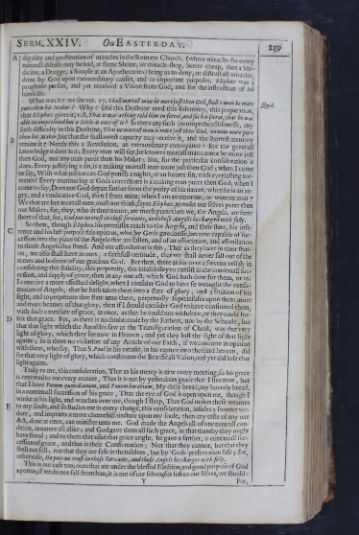 Serm. XXIV.
On Easter-day.
239
digality and prostitution of miracles in the Romane Church, (where miracles for every
Serm. XXIV.
On Easter-day.
239
digality and prostitution of miracles in the Romane Church, (where miracles for every
naturall disease may be had, at some Shrine, or miracle-shop, better cheap, then a Me-
dicine, a Drugge, a Simple at an Apothecaries) bring us to deny, or distrust all miracles,
done by God upon extraordinary causes, and to important purposes. Eliphaz was a
prophane person, and yet received a Vision from God, and for the instruction of Iob
himselfe.
Quid. What was it? we see ver. 17. Shall mortall man be more just then God, shall a man be more
pure then his Maker? Why? Did this Doctrine need this solemnity, this preparation,
that Eliphaz gives it, v. 8. That it was a thing told him in secret, and such a secret, that he was
able to comprehend but a little at once of it? Is there any such incomprehensiblenesse, any
such difficulty in this Doctrine, That no mortall man is more just then God, no man more pure
then his Maker, but that the shallowest capacity may receive it, and the shortest memory
retaine it? Needs this a Revelation, an extraordinary conveyance? For the generall
knowledge it does not; Every man will say, he knowes mortall man cannot be more just
then God, nor any man purer then his Maker; But, for the particular consideration it
does. Every justifying a sin, is a making mortall man more just then God; when I come
to say, With what justice can God punish a nights, or an houres sin, with everlasting tor-
ments? Every murmuring at Gods corrections is a making man purer then God; when I
come to say, Does not God depart farther from the purity of his nature, when he is an an-
gry, and a vindicative God, then I from mine, when I am an amorous, or wanton man?
We that are but mortall men, must not think, sayes Eliphaz, to make our selves purer then
our Maker; for, they, who in their nature, are much purer then we, the Angels, are farre
short of that, for, God put no trust in those servants, and those Angells he charged with folly.
So then, though Eliphaz his premisses reach to the Angels, and their state, his infe-
rence and his last purpose fals upon us, who, by Gods goodnesse, become capable of suc-
cession into the place of the Angels that are fallen, and of an association, and assimilation
to those Angels that stand. And our assimilation is this, That as they have in their stati-
on, we also shall have in ours, a faithfull certitude, that we shall never fall out of the
armes and bosome of our gracious God. But then, there arises to us a sweeter rellish in
considering this stability, this perpetuity, this infallibility to consist in the continuall suc-
cession, and supply of grace, then in any one act, which God hath done for them, or us.
I conceive a more effectual delight, when I consider God to have so wrought the confir-
mation of Angels, that he hath taken them into a state of glory, and a fruition of his
sight, and to perpetuate that state unto them, perpetually superinfuses upon them more
and more beames of that glory, then if I should consider God to have confirmed them,
with such a measure of grace, at once, as that he could not withdraw, or they could for-
feit that grace. For, as there is no doubt made by the Fathers, nor by the Schoole, but
that that light which the Apostles saw at the Transfiguration of Christ, was that very
light of glory, which they see now in Heaven, and yet they lost the sight of that light
againe; so is there no violation of any Article of our Faith, if we concurre in opinion
with them, who say, That S. Paul in his extasie, in his rapture into the third heaven, did
see that very light of glory, which constitutes the Beatificall Vision, and yet did lose that
light againe.
Truly to me, this consideration, That as his mercy is new every morning, so his grace
is renewed to me every minute, That it is not by yesterdaies grace that I live now, but
that I have Panem quotidianum, and Panem horarium, My daily bread, my hourely bread,
in a continuall succession of his grace, That the eye of God is open upon me, though I
winke at his light, and watches over me, though I sleep, That God makes these returnes
to my soule, and so studies me in every change, this consideration, infuses a sweeter ver-
dure, and imprints a more cheerefull tincture upon my soule, then any taste of any one
Act, done at once, can minister unto me. God made the Angels all of one naturall con-
dition, in nature all alike; and God gave them all such grace, as that thereby they might
have stood; and to them that used that grace aright, he gave a farther, a continuall suc-
cession of grace, and that is their Confirmation; Not that they cannot, but that they
shall not fall; not that they are safe in themselves, but by Gods preservation safe; for,
otherwise, He puts no trust in those Servants, and those Angels he charges with folly. This is our case too; ours that are under the blessed Election, and good purpose of God
upon us; if we do not fall from him, it is not of our selves; for left to our selves, we should: Y For,
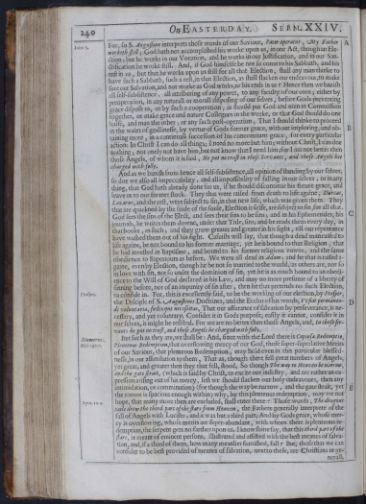 240
On Easter-day.
Serm. XXIV.
For, Iohn 5. so S. Augustine interprets those words of our Saviour, Pater operatur, My Father
240
On Easter-day.
Serm. XXIV.
For, Iohn 5. so S. Augustine interprets those words of our Saviour, Pater operatur, My Father
worketh still; God hath not accomplished his worke upon us, in one Act, though an Ele-
ction; but he works in our Vocation, and he works in our Justification, and in our San-
ctification he works still. And, if God himselfe be not so come to his Sabbath, and his
rest in us, but that he works upon us still for all that Election, shall any man thinke to
have such a Sabbath, such a rest, in that Election, as shall slacken our endeavour, to make
sure our Salvation, and not worke as God works, to his ends in us? Hence then we banish
all self-subsistence, all attributing of any power, to any faculty of our own; either by
preoperation, in any naturall or morall disposing of our selves, before Gods preventing
grace dispose us, or by such a cooperation, as should put God and man in Commission
together, or make grace and nature Collegues in the worke, or that God should do one
halfe, and man the other; or any such post-operation, That I should thinke to proceed
in the waies of godlinesse, by vertue of Gods former grace, without imploring, and ob-
taining more, in a continuall succession of his concomitant grace, for every particular
action: In Christ I can do all things; I need no more but him; without Christ, I can doe
nothing; not onely not have him, but not know that I need him; for I am not better then
those Angels, of whom it is said, He put no trust in those Servants, and those Angels hee
charged with folly.
And as we banish from hence all self-subsistence, all opinion of standing by our selves,
so doe we also all impeccability, and all impossibility of falling in our selves, or in any
thing, that God hath already done for us, if he should discontinue his future grace, and
leave us to our former stock. They that were raised from death to life againe, Dorcas,
Lazarus, and the rest, were subject to sin, in that new life, which was given them. They
that are quickned by the soule of the soule, Election it selfe, are subject to sin, for all that.
God sees the sins of the Elect, and sees their sins to be sins; and in his Ephemerides, his
journals, he writes them downe, under that Title, sins, and he reads them every day, in
that booke, as such; and they grow greater and greater in his sight, till our repentance
have washed them out of his sight. Casuists will say, that though a dead man raised to
life againe, be not bound to his former marriage, yet he is bound to that Religion, that
he had invested in Baptisme, and bound to his former religious vowes, and the same
obedience to Superiours as before. We were all dead in Adam; and he that is raised a-
gaine, even by Election, though he be not so married to the world, as others are, not so
in love with sin, not so under the dominion of sin, yet he is as much bound to an obedi-
ence to the Will of God declared in his Law, and may no more presume of a liberty of
sinning before, nor of an impunity of sin after, then he that pretends no such Election,
to confide in.Prosper. For, this is excellently said, to be the working of our election, by Prosper,
the Disciple of S. Augustines Doctrines, and the Eccho of his words, Vt fiat permanen-
di voluntaria, fœlixque necessitas, That our assurance of salvation by perseverance, is ne-
cessary, and yet voluntary; Consider it in Gods purpose, easily it cannot, consider it in
our selves, it might be resisted. For we are no better then those Angels, and, In those ser-
vants he put no trust, and those Angels he charged with folly.
But such as they are, Numerus.
Psal. 130.7. we shall be: And, since with the Lord there is Copiosa Redemptio,
Plenteous Redemption, that overflowing mercy of our God, those super-superlative Merits
of our Saviour, that plenteous Redemption, may hold even in this particular blessed-
nesse, in our assimilation to them, That as, though there fell great numbers of Angels,
yet great, and greater then they that fell, stood, So though The way to Heaven be narrow,
and the gate strait, (which is said by Christ, to excite our industry, and are rather an ex-
pression arising out of his mercy, lest we should slacken our holy endeavours, then any
intimidation, or commination) (for though the way be narrow, and the gate strait, yet
the roome is spacious enough within) why, by this plenteous redemption, may we not
hope, Apoc. 12.4. that many more then are excluded, shall enter there? Those words, The dragons
taile drew the third part of the stars from Heaven, the Fathers generally interprete of the
fall of Angels with Lucifer; and it was but a third part; And by Gods grace, whose mer-
cy is overflowing, whose merits are super-abundant, with whom there is plenteous re-
demption, the serpent gets no farther upon us. I know some say, that this third part of the
stars, is meant of eminent persons, illustrated and assisted with the best meanes of salva-
tion, and, if a third of them, how many meanlier furnished, fall? But, those that we can
consider to be best provided of meanes of salvation, nextto these, are Christians in ge-
nerall;
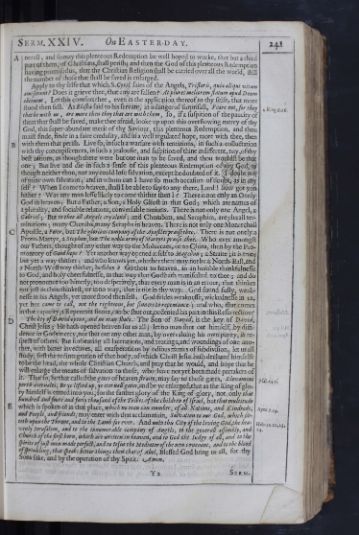 Serm. XXIV.
On Easter-day.
241
nerall; and so may this plenteous Redemption be well hoped to worke, that but a third
Serm. XXIV.
On Easter-day.
241
nerall; and so may this plenteous Redemption be well hoped to worke, that but a third
part of them, of Christians, shall perish; and then the God of this plenteous Redemption
having promised us, that the Christian Religion shall be carried over all the world, still
the number of those that shall be saved is enlarged.
Apply to thy selfe that which S. Cyril saies of the Angels, Tristaris, quia aliqui vitam
amiserunt? Does it grieve thee, that any are fallen? At plures meliorem statum apud Deum
obtinent, Let this comfort thee, even in the application thereof to thy selfe, that more
2 King 6.16. stood then fell. As Elisha said to his servant, in a danger of surprisall, Feare not, for they
that be with us, are more then they that are with them, so, if a suspition of the paucity of
them that shall be saved, make thee afraid, looke up upon this overflowing mercy of thy
God, this super-abundant merit of thy Saviour, this plenteous Redemption, and thou
maist finde, finde in a faire credulity, and in a well regulated hope, more with thee, then
with them that perish. Live so, in such a warfare with tentations, in such a colluctation
with thy concupiscences, in such a jealousie, and suspition of thine indifferent, nay, of thy
best actions, as though there were but one man to be saved, and thou wouldst be that
one; But live and die in such a sense of this plenteous Redemption of thy God, as
though neither thou, nor any could lose salvation, except he doubted of it. I doubt not
of mine own salvation; and in whom can I have so much occasion of doubt, as in my
self? When I come to heaven, shall I be able to say to any there, Lord! how got you
hither? Was any man lesse likely to come thither then I? There is not only an Onely
God in heaven; But a Father, a Son, a Holy Ghost in that God; which are names of
a plurality, and sociable relations, conversable notions. There is not only one Angel, a
Gabriel; But to thee all Angels cry alond; and Cherubim, and Seraphim, are plurall ter-
minations; many Cherubs, many Seraphs in heaven. There is not only one Monarchall
Apostle, a Peter, but The glorious company of the Apostles praise thee. There is not onely a
Proto-Martyr, a Stephen, but The noble army of Martyrs praise thee. Who ever amongst
our Fathers, thought of any other way to the Moluccaes, or to China, then by the Pro-
montory of Good hope? Yet another way opened it self to Magellan; a Straite; it is true;
but yet a way thither; and who knows yet, whether there may not be a North-East, and
a North-West way thither, besides? Go thou to heaven, in an humble thankfulnesse
to God, and holy cheerfulnesse, in that way that God hath manifested to thee; and do
not pronounce too bitterly, too desperately, that every man is in an errour, that thinkes
not just as thou thinkest, or in no way, that is not in thy way. God found folly, weak-
nesse in his Angels, yet more stood then fell; God findes weaknesse, wickednesse in us,
yet hee came to call, not the righteous, but sinners to repentance; and who, that comes
in that capacity, a Repentant sinner, can be shut out, or denied his part in this Resurrection?
The key of David opens, and no man shuts. The Son of David, is the key of David,
Christ Jesus; He hath opened heaven for us all; let no man shut out himself, by diffi-
dence in Gods mercy, nor shut out any other man, by overvaluing his own purity, in re-
spect of others. But forbearing all lacerations, and tearings, and woundings of one ano-
ther, with bitter invectives, all exasperations by odious names of subdivision, let us all
study, first the redintegration of that body, of which Christ Jesus hath declared himselfe
to be the head, the whole Christian Church, and pray that he would, and hope that he
will enlarge the means of salvation to those, who have not yet been made partakers of
Psal. 24.7. it. That so, he that called the gates of heaven straite, may say to those gates, Elevamini
portæ æternales, Be ye lifted up, ye eternall gates, and be ye enlarged, that as the King of glo-
ry himself is entred into you, for the farther glory of the King of glory, not only that
hundred and foure and forty thousand of the Tribes of the children of Israel, but that multitude
which is spoken or in that place, which no man can number, of all Nations, and Kindreds,
Apoc. 7.19. and People, and friends, may enter with that acclamation, Salvation to our God, which sit-
teth upon the Throne, and to the Lamb for ever. And unto this City of the living God, Heb. 12.22, 23,
24. the hea-
venly Ierusalem, and to the innumerable company of Angels, to the generall assembly, and
Church of the first born, which are written in heaven, and to God the Iudge of all, and to the
spirits of just men made perfect, and to Iesus the Mediator of the new covenant, and to the blood
of sprinkling, that speaks better things then that of Abel, Blessed God bring us all, for thy
Sons sake, and by the operation of thy Spirit. Amen. Y2 Serm.
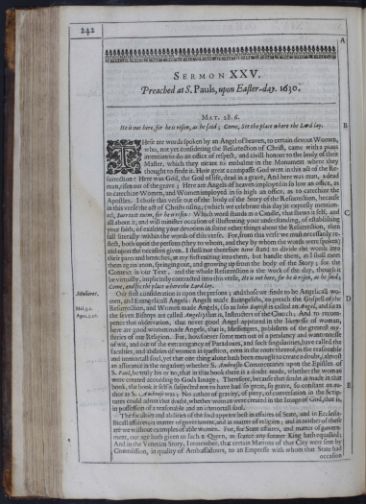 242
242
Sermon XXV.
Preached at S. Pauls, upon Easter-day. 1630.
Mat. 28.6.
He is not here, for he is risen, as he said; Come, See the place where the Lord lay.
THeseThese are words spoken by an Angel of heaven, to certain devout Women,
who, not yet considering the Resurrection of Christ, came with a pious
intention to do an office of respect, and civill honour to the body of their
Master, which they meant to embalme in the Monument where they
thought to finde it. How great a compasse God went in this act of the Re-
surrection? Here was God, the God of life, dead in a grave, And here was man, a dead
man, risen out of the grave; Here are Angels of heaven imployed in so low an office, as
to catechize Women, and Women imployed in so high an office, as to catechize the
Apostles. I chose this verse out of the body of the Story of the Resurrection, because
in this verse the act of Christs rising, (which we celebrate this day) is expresly mention-
ed, Surrexit enim, for he is risen: Which word stands as a Candle, that shews it self, and
all about it, and will minister occasion of illustrating your understanding, of establishing
your faith, of exalting your devotion in some other things about the Resurrection, then
fall literally within the words of this verse. For, from this verse we must necessarily re-
flect, both upon the persons (they to whom, and they by whom the words were spoken)
and upon the occasion given. I shall not therefore now stand to divide the words into
their parts and branches, at my first entring into them, but handle them, as I shall meet
them again anon, springing out, and growing up from the body of the Story; for the
Context is our Text, and the whole Resurrection is the work of the day, though it
be virtually, implicitely contracted into this verse, He is not here, for he is risen, as he said;
Come, and see the place where the Lord lay.
Our first consideration is upon the persons;Mulieres. and those we finde to be Angelicall wo-
men, and Euangelicall Angels: Angels made Euangelists, to preach the Gospell of the
Resurrection, Mal. 3.1. and Women made Angels, (so as Iohn Baptist is called an Angel, and so as
the seven Bishops are called Angels) that is, Instructers of the Church; And to recom-
pence that observation, that never good Angel appeared in the likenesse of woman, Apoc. 1.20.
here are good women made Angels, that is, Messengers, publishers of the greatest my-
steries of our Religion. For, howsoever some men out of a petulancy and wantonnesse
of wit, and out of the extravagancy of Paradoxes, and such singularities, have called the
faculties, and abilities of women in question, even in the roote thereof, in the reasonable
and immortall soul, yet that one thing alone hath been enough to create a doubt, (almost
an assurance in the negative) whether S. Ambroses Commentaries upon the Epistles of
S. Paul, be truly his or no, that in that book there is a doubt made, whether the woman
were created according to Gods Image; Therefore, because that doubt is made in that
book, the book it self is suspected not to have had so great, so grave, so constant an au-
thor as S. Ambrose was; No author of gravity, of piety, of conversation in the Scrip-
tures could admit that doubt, whether woman were created in the Image of God, that is,
in possession of a reasonable and an immortall soul.
The faculties and abilities of the soul appeare best in affaires of State, and in Ecclesia-
sticall affaires; in matter of government, and in matter of religion; and in neither of these
are we without examples of able women. For, for State affaires, and matter of govern-
ment, our age hath given us such a Queen, as scarce any former King hath equalled;
And in the Venetian Story, I remember, that certain Matrons of that City were sent by
Commission, in quality of Ambassadours, to an Empresse with whom that State had occasion
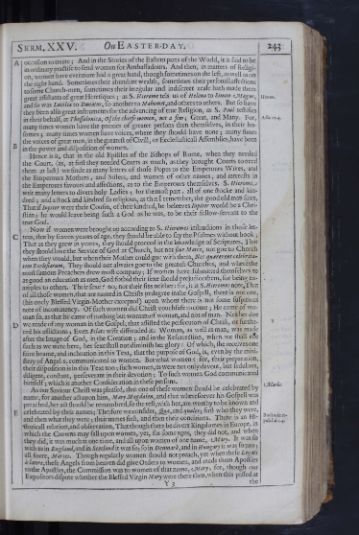 Serm. XXV.
On Easter-day.
243
occasion to treate; And in the Stories of the Eastern parts of the World, it is said to be
Serm. XXV.
On Easter-day.
243
occasion to treate; And in the Stories of the Eastern parts of the World, it is said to be
in ordinary practise to send women for Ambassadours. And then, in matters of Religi-
on, women have evermore had a great hand, though sometimes on the left, as well as on
the right hand. Sometimes their abundant wealth, sometimes their personall affections
to some Church-men, sometimes their irregular and indiscreet zeale hath made them
great assistants of great Heretiques; as S. Hierome tels us of Helena to Simon Magus,
Hieron. and so was Lucilia to Donatus, so another to Mahomet, and others to others. But so have
they been also great instruments for the advancing of true Religion, as S. Paul testifies
in their behalf, at Thessolonica, Of the chiefe women, not a few; Great, and Many. For,
Acts 17.4. many times women have the proxies of greater persons then themselves, in their bo-
somes; many times women have voices, where they should have none; many times
the voices of great men, in the greatest of Civill, or Ecclesiasticall Assemblies, have been
in the power and disposition of women.
Hence is it, that in the old Epistles of the Bishops of Rome, when they needed
the Court, (as, at first they needed Courts as much, as they brought Courts to need
them at last) we finde as many letters of those Popes to the Emperours Wives, and
the Emperours Mothers, and Sisters, and women of other names, and interests in
the Emperours favours and affections, as to the Emperours themselves. S. Hierome
writ many letters to divers holy Ladies; for the most part, all of one stocke and kin-
dred; and a stock and kindred so religious, as that I remember, the good old man saies,
That if Iupiter were their Cousin, of their kindred, he beleeves Iupiter would be a Chri-
stian; he would leave being such a God as he was, to be their fellow-servant to the
true God.
Now if women were brought up according to S. Hieromes instructions in those let-
ters, that by seaven yeares of age, they should be able to say the Psalmes without book;
That as they grew in yeares, they should proceed in the knowledge of Scriptures, That
they should love the Service of God at Church, but not sine Matre, not goe to Church
when they would, but when their Mother could goe with them, Nec quærerent celebrita-
tem Ecclesiarum, They should not alwaies goe to the greatest Churches, and where the
most famous Preachers drew most company; If women have submitted themselves to
as good an education as men, God forbid their sexe should prejudice them, for being ex-
amples to others. Their sexe? no, nor their sins neither: for, it is S. Hieromes note, That
of all those women, that are named in Christs pedegree in the Gospell, there is not one,
(his onely Blessed Virgin-Mother excepted) upon whom there is not some suspitious
note of incontinency. Of such women did Christ vouchsafe to come; He came of wo-
man so, as that he came of nothing but woman; of woman, and not of man. Neither doe
we reade of any woman in the Gospel, that assisted the persecutors of Christ, or furthe-
red his afflictions; Even Pilats wife disswaded it. Woman, as well as man, was made
after the Image of God, in the Creation; and in the Resurrection, when we shall rise
such as we were here, her sexe shall not diminish her glory: Of which, she receives one
faire beame, and inchoation in this Text, that the purpose of God, is, even by the mini-
stery of Angels, communicated to women. But what women? for, their preparation,
their disposition is in this Text too; such women, as were not only devout, but sedulous,
diligent, constant, perseverant in their devotion; To such women God communicated
himself; which is another Consideration in these persons.
As our Saviour Christ was pleased, that one of these women should be celebrated by Mariæ.
name, for another act upon him, Mary Magdalen, and that wheresoever his Gospell was
preached, her act should be remembred, so the rest, with her, are worthy to be known and
celebrated by their names; Therfore we consider, Quæ, and quales; first who they were,
and then what they were; their names first, and then their conditions.Bodin de re-
pub. l. 6. c. 4. There is an Hi-
storicall relation, and observation, That though there be divers Kingdomes in Europe, in
which the Crowns may fall upon women, yet, for some ages, they did not, and when
they did, it was much at one time, and all upon women of one name, Mary. It was so
with us in England, and in Scotland it was so; so in Denmark, and in Hungary it was so too;
all foure, Maries. Though regularly women should not preach, yet when these Legati
à latere, these Angels from heaven did give Orders to women, and made them Apostles
to the Apostles, the Commission was to women of that name, Mary; for, though our
Expositors dispute whether the Blessed Virgin Mary were there then, when this passed at Y3 the
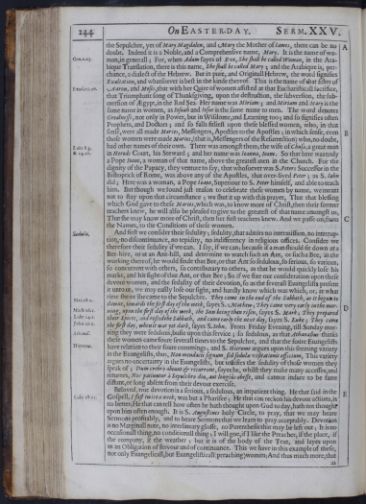 244
On Easter-day.
Serm. XXV.
the Sepulchre, yet of Mary Magdalen, and Mary the Mother of Iames, there can be no
244
On Easter-day.
Serm. XXV.
the Sepulchre, yet of Mary Magdalen, and Mary the Mother of Iames, there can be no
doubt. Indeed it is a Noble, and a Comprehensive name, Mary. It is the name of wo-
man, in generall;Gen. 2.23. For, when Adam sayes of Eve, She shall be called Woman, in the Ara-
bique Translation, there is this name, She shall be called Mary; and the Arabique is, per-
chance, a dialect of the Hebrew. But in pure, and Originall Hebrew, the word signifies
Exaltation, and whatsoever is best in the kinde thereof. This is the name of that sister of
Aaron,Exod. 15.20. and Moses, that with her Quire of women assisted at that Eucharisticall sacrifice,
that Triumphant song of Thanksgiving, upon the destruction, the subversion, the sub-
mersion of Ægypt, in the Red Sea. Her name was Miriam; and Miriam and Mary is the
same name in women, as Iosuah and Iesus is the same name to men. The word denotes
Greatnesse, not only in Power, but in Wisdome, and Learning too; and so signifies often
Prophets, and Doctors; and so falls fitliest upon these blessed women, who, in that
sense, were all made Maries, Messengers, Apostles to the Apostles; in which sense, even
those women were made Maries, (that is, Messengers of the Resurrection) who, no doubt,
had other names of their own. There was amongst them, the wife of Chusa, a great man
in Herods Court, Luke 8.3.
& 24.10. his Steward; and her name was Ioanna, Ioane. So that here was truly
a Pope Ioane, a woman of that name, above the greatest men in the Church. For the
dignity of the Papacy, they venture to say, that whosoever was S. Peters Successor in the
Bishoprick of Rome, was above any of the Apostles, that over-lived Peter; as S. Iohn
did; Here was a woman, a Pope Ioane, Superiour to S. Peter himself, and able to teach
him. But though we found just reason to celebrate these women by name, we meant
not to stay upon that circumstance; we shut it up with this prayer, That that blessing
which God gave to these Maries, which was, to know more of Christ, then their former
teachers knew, he will also be pleased to give to the greatest of that name amongst us,
That she may know more of Christ, then her first teachers knew. And we passe on, from
the Names, to the Conditions of these women.
And first we consider their sedulity; sedulity, that admits no intermission, Sædulæ. no interrup-
tion, no discontinuance, no tepidity, no indifferency in religious offices. Consider we
therefore their sedulity if we can. I say, if we can; because if a man should sit down at a
Bee-hive, or at an Ant-hill, and determine to watch such an Ant, or such a Bee, in the
working thereof, he would finde that Bee, or that Ant so sedulous, so serious, so various,
so concurrent with others, so contributary to others, as that he would quickly lose his
marks, and his sight of that Ant, or that Bee; So if we fixe our consideration upon these
devout women, and the sedulity of their devotion, so as the severall Euangelists present
it unto us, we may easily lose our sight, and hardly know which was which, or, at what
time she or she came to the Sepulchre. They came in the end of the Sabbath, as it begun to
dawne,Mat. 28.1. towards the first day of the week, sayes S. Mathew; They came very early in the mor-
ning, upon the first day of the week,Mark 16.2. the Sun being then risen, sayes S. Mark; They prepared
their Spices, and rested the Sabbath, and came early the next day, sayes S. Luke; They came Luke 24.1.
the first day, when it was yet dark, sayes S. Iohn. John 20.1. From Friday Evening, till Sunday mor-
ning they were sedulous, Athanas. busie upon this service; so sedulous, as that Athanasius thinks
these women came foure severall times to the Sepulchre, and that the foure Euangelists
have relation to their foure commings;Hierome. and S. Hierome argues upon this seeming variety
in the Euangelists, thus, Non mendacii signum, sed sedulæ visitationis officium, This variety
argues no uncertainty in the Euangelists, but testifies the sedulity of those women they
speak of; Dum crebrò abeunt & recurrunt, sayes he, whilst they make many accesses, and
returnes, Nec patiuntur à Sepulchro diu, aut longiùs abesse, and cannot indure to be farre
distant, or long absent from their devout exercise.
Beloved, true devotion is a serious, a sedulous, an impatient thing. He that said in the
Gospell, Luke 18.11. I fast twice a week, was but a Pharisee; He that can reckon his devout actions, is
no better; He that can tell how often he hath thought upon God to day, hath not thought
upon him often enough. It is S. Augustines holy Circle, to pray, that we may heare
Sermons profitably, and to heare Sermons that we learn to pray acceptably. Devotion
is no Marginall note, no interlineary glosse, no Parenthesis that may be left out; It is no
occasionall thing, no conditionall thing; I will goe, if I like the Preacher, if the place, if
the company, if the weather; but it is of the body of the Text, and layes upon
us an Obligation of fervour and of continuance. This we have in this example of these,
not only Euangelicall, but Euangelisticall (preaching) women; And thus much more, that as
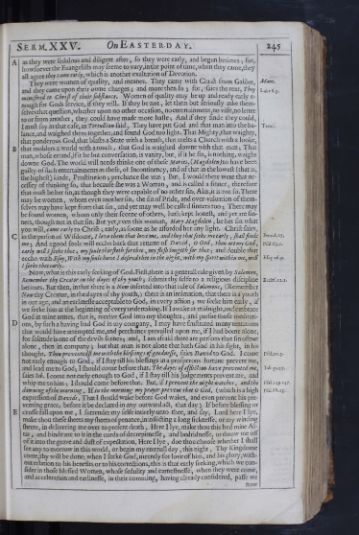 Serm. XXV.
On Easter-day.
245
as they were sedulous and diligent after, so they were early, and begun betimes; for,
Serm. XXV.
On Easter-day.
245
as they were sedulous and diligent after, so they were early, and begun betimes; for,
howsoever the Euangelists may seeme to vary, in the point of time, when they came, they
all agree they came early, which is another exaltation of Devotion.
They were women of quality, and meanes. They came with Christ from Galilee, Mane
and they came upon their owne charges; and more then so; for, saies the text, Luke 8.3. They
ministred to Christ of their substance. Women of quality may be up and ready early e-
nough for Gods service, if they will. If they be not, let them but seriously aske them-
selves that question, whether upon no other occasion, no entertainment, no visit, no letter
to or from another, they could have made more haste; And if they finde they could,
I must say in that case, as Tertullian said, Tertul. They have put God and that man into the ba-
lance, and waighed them together, and found God too light. That Mighty, that waighty,
that ponderous God, that blasts a State with a breath, that melts a Church with a looke,
that molders a world with a touch, that God is waighed downe with that man; That
man, whose errand, if it be but conversation, is vanity, but, if it be sin, is nothing, waighs
downe God. The world will needs thinke one of these Maries, (Magdalen) to have been
guilty of such entertainments as these, of Incontinency, and of that in the lowest (that is,
the highest) kinde, Prostitution; perchance she was; But, I would there were that ne-
cessity of thinking so, that because she was a Woman, and is called a sinner, therefore
that must be her sin, as though they were capable of no other sin; Alas, it is not so. There
may be women, whom even another sin, the sin of Pride, and over-valuation of them-
selves may have kept from that sin, and yet may well be called sinners too; There may
be found women, whom only their scorne of others, hath kept honest, and yet are sin-
ners, though not in that sin. But yet, even this woman; Mary Magdalen, be her sin what
you will, came early to Christ; early, as soone as he afforded her any light. Christ saies,
in the person of Wisdome, I love them that love me, and they that seeke me early,Prov. 8.17. shall finde
me; And a good soule will eccho back that returne of David, O God, thou art my God,
Psal. 63.1. early will I seeke thee; my soule thirsteth for thee, my flesh longeth for thee; and double that
eccho with Esay, With my soule have I desired thee in the night, with my spirit within me,Esay 26.9. will
I seeke thee early.
Now, what is this early seeking of God. First, there is a generall rule given by Salomon,
Eccles. 12.1. Remember thy Creator in the dayes of thy youth; submit thy selfe to a religious discipline
betimes. But then, in that there is a Now inserted into that rule of Solomons, (Remember
Now thy Creator, in the dayes of thy youth,) there is an intimation, that there is a youth
in our age, and an earlinesse acceptable to God, in every action; we seeke him early, if
we seeke him at the beginning of every undertaking. If I awake at midnight, and embrace
God in mine armes, that is, receive God into my thoughts, and pursue those meditati-
ons, by such a having had God in my company, I may have frustrated many tentations
that would have attempted me, and perchance prevailed upon me, if I had beene alone,
for solitude is one of the devils scenes; and, I am afraid there are persons that sin oftner
alone, then in company; but that man is not alone that hath God in his sight, in his
thought. Thou preventedst me with the blessings of goodnesse, saies David to God.Psal. 21.3. I come
not early enough to God, if I stay till his blessings in a prosperous fortune prevent me,
and lead me to God; I should come before that. The dayes of affliction have prevented me,
Iob 30.27. saies Iob. I come not early enough to God, if I stay till his Judgements prevent me, and
whip me to him; I should come before that. But, if I prevent the night watches,Psal. 119.147. and the
dawning of the morning, If in the morning my prayer prevent thee O God,Psal. 88.13. (which is a high
expression of Davids, That I should wake before God wakes, and even prevent his pre-
venting grace, before it be declared in any outward act, that day) If before blessing or
crosse fall upon me, I surrender my selfe intirely unto thee, and say, Lord here I lye,
make thou these sheets my sheets of penance, in inflicting a long sicknesse, or my winding
sheete, in delivering me over to present death, Here I lye, make thou this bed mine Al-
tar, and binde me to it in the cords of decrepitnesse, and bedridnesse, or throw me off
of it into the grave and dust of expectation, Here I lye, doe thou choose whether I shall
see any to morrow in this world, or begin my eternall day, this night, Thy Kingdome
come, thy will be done; when I seeke God, meerely for love of him, and his glory, with-
out relation to his benefits or to his corrections, this is that early seeking, which we con-
sider in those blessed Women, whose sedulity and earnestnesse, when they were come,
and acceleration and earlinesse, in their comming, having already considered, passe we now
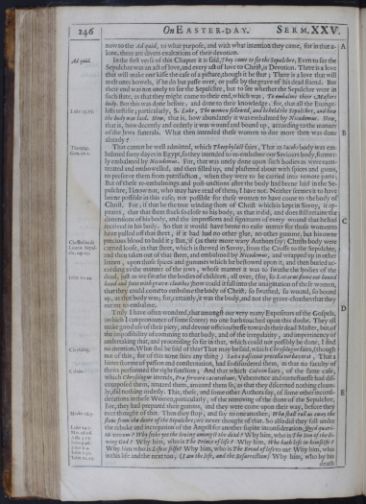 246
On Easter-day.
Serm. XXV.
now to the Ad quid, to what purpose, and with what intention they came, for in that a-
246
On Easter-day.
Serm. XXV.
now to the Ad quid, to what purpose, and with what intention they came, for in that a-lone, there are divers exaltations of their devotion.
In the first verse of this Chapter it is said, Ad quid. They came to see the Sepulchre; Even to see the
Sepulchre was an act of love, and every act of love to Christ, is Devotion. There is a love
that will make one kisse the case of a picture, though it be shut; There is a love that will
melt ones bowels, if he do but passe over, or passe by the grave of his dead friend. But
their end was not onely to see the Sepulchre, but to see whether the Sepulchre were in
such state, as that they might come to their end, which was, To embalme their Masters
body. But this was done before; and done to their knowledge; for, that all the Euange-
lists testifie;Luke 23.55. particularly, S. Luke, The women followed, and beheld the Sepulchre, and how
the body was laid. How, that is, how abundantly it was embalmed by Nicodemus. How,
that is, how decently and orderly it was wound and bound up, according to the manner
of the Jews funerals. What then intended these women to doe more then was done
already?
That cannot be well admitted, Theophy. which Theophylact saies, That as Iacobs body was em-
balmed forty dayes in Egypt, so they intended to re-embalme our Saviours body, Gen. 50.1. former-
ly embalmed by Nicodemus. For, that was onely done upon such bodies as were exen-
terated and embowelled, and then filled up, and plastered about with spices and gums,
to preserve them from putrifaction, when they were to be carried into remote parts;
But of these re-embalmings and post-unctions after the body had beene laid in the Se-
pulchre, I know not, who may have read of them; I have not. Neither seemes it to have
beene possible in this case; not possible for these women to have come to the body of
Christ. For, if that be the true winding sheet of Christ which is kept in Savoy, it ap-
peares, that that sheet stuck so close to his body, as that it did, and does still retaine the
dimensions of his body, and the impressions and signatures of every wound that he had
received in his body. So that it would have beene no easie matter for those women to
have pulled off that sheet, if it had had no other glue, no other gumme, but his owne
precious blood to hold it;Chiffletius de
Linteis Sepul-
chr. cap. 25. But, if (as their more wary Authors say) Christs body were
carried loose, in that sheet, which is shewed in Savoy, from the Crosse to the Sepulchre,
and then taken out of that sheet, and embalmed by Nicodemus, and wrapped up in other
linnen, upon those spices and gummes which he bestowed upon it, and then buried ac-
cording to the manner of the jews, whose manner it was to swathe the bodies of the
dead, Iohn 11.44. just as we swathe the bodies of children, all over, (for, so Lazarus came out bound
hand and foote with grave-cloathes) how could it fall into the imagination of these women,
that they could come to embalme the body of Christ, so swathed, so wound, so bound
up, as that body was; for, certainly, it was the body, and not the grave-cloathes that they
meant to embalme.
Truly I have often wondred, that amongst our very many Expositors of the Gospels,
(which I can pronounce of some scores) no one hath touched upon this doubt. They all
make good use of their piety, and devout officiousnesse towards their dead Master, but of
the impossibility of comming to that body, and of the irregularity, and impertinency of
undertaking that, and proceeding so far in that, which could not possibly be done, I find
no mention.Chrysolog. What shal be said of this? That may be said, which Chrysologus saies, (though
not of this, for of this none saies any thing) Sæva passionis procella turbaverat, That a
bitter storme of passion and consternation, had so disordered them, as that no faculty of
theirs performed the right function;Calvin And that which Calvin saies, of the same case,
which Chrysologus intends, Præ fervore cæcutiebant, Vehemence and earnestnesse had dis-
composed them, amazed them, amuzed them so, as that they discerned nothing cleare-
ly, did nothing orderly. This, these, and some other Authors say, of some other inconsi-
derations in these Women, particularly, of the removing of the stone of the Sepulchre.
For, they had prepared their gumms, and they were come upon their way, before they
ever thought of that.Marke 16.3. Then they stop, and say to one another, Who shall roll us away the
stone from the doore of the Sepulchre; we never thought of that. So also did they fall under
the rebuke and increpation of the Angell for another supine inconsideration;Luke 24.5. Quid quæri-
tis vivum? Why seeke yee the living amongst the dead? Why him, who is Mat 16.16. The Son of the li-
ving God? Why him, who is The Prince of life? Why him, Who hath life in himselfe? Acts 3.15.
Why him who is Life it selfe? Why him, who is The Bread of life to us? Why him, who Iohn 5.26.
is this life and the next too, (I am the life, and the Resurrection) Why him, who by his Iohn 1.4.
Iohn 6.35.
Iohn 11.25. death
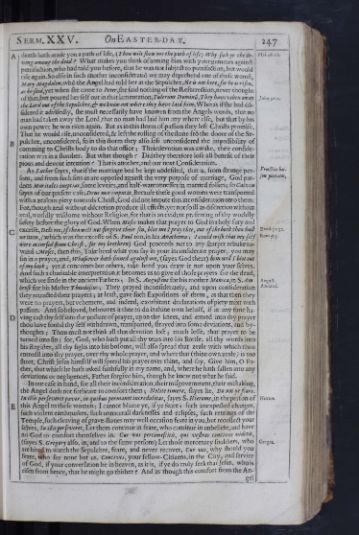 Serm. XXV.
On Easter-day.
247
death hath made you a path of life, Psal. 16.11. (Thou wilt shew me the path of life) Why seek ye the li-
Serm. XXV.
On Easter-day.
247
death hath made you a path of life, Psal. 16.11. (Thou wilt shew me the path of life) Why seek ye the li-ving among the dead? What makes you think of arming him with your gummes against
putrifaction, who had told you before, that he was not subject to putrifaction, but would
rise again. So also in such another inconsideratiō we may deprehend one of these womē,
Mary Magdalen; whē the Angel had told her at the Sepulchre, He is not here, for he is risen,
as he said, yet when she came to Peter, she said nothing of the Resurrection, John 20.2 never thought
of that, but poured her self out in that lamentation, Tulerunt Dominū, They have taken away
the Lord out of the Sepulchre, & we know not where they have laid him; Wheras if she had cō-
sidered it advisedly, she must necessarily have knowen from the Angels words, that no
man had taken away the Lord, that no man had laid him any where else, but that by his
own power he was risen again. But as in this storm of passion they left Christs promise,
That he would rise, unconsidered, & left the rolling of the stone frō the doore of the Se-
pulchre, unconsidered, so in this storm they also left unconsidered the impossibility of
comming to Christs body to do that office; Their devotion was awake, their conside-
ration was in a slumber. But what though? Did they therefore lose all benefit of their
pious and devout intention? That is another, and our next Consideration.
As Luther sayes, that if the marriage bed be kept undefiled, that is, Fructus hu-
jus pietatis. from strange per-
sons, and from such sins as are opposed against the very purpose of marriage, God par-
dons Maritales ineptias, some levities, and half-wantonnesses in married folkes; so Calvin
sayes of our present case, Deus non impatat, Because these good women were transported
with a zealous piety towards Christ, God did not impure this in consideration unto them.
For, though zeal without discretion produce ill effects, yet not so ill as discretion without
zeal, worldly wisdome without Religion, for that is an evident preferring of thy worldly
safety before the glory of God. When Moses makes that prayer to God in a holy fury and
excesse, Dele me, If thou wilt not forgive their sin, blot me I pray thee,Exod. 32.32. out of the book thou hast
written, (which was the excesse of S. Paul too, in his Anathema; I could wish that my self Rom. 9.3.
were accursed from Christ, for my brethren) God proceeds not to any sharper rebuke to-
ward Moses, then this. Take heed what you say in your inconsiderate prayer, you may
sin in a prayer, and, Whosoever hath sinned against me, (sayes God there) him will I blot out
of my book; yet it concernes but others, take heed you draw it not upon your selves.
And such a charitable interpretation it becomes us to give of those prayers for the dead,
which we finde in the ancient Fathers;August. In S. Augustine for his mother Monica, in S. Am-
brose for his Master Theodosius; They prayed inconsiderately, and upon consideration Ambros.
they retracted their prayers; at least, gave such Expositions of them, as that then they
were no prayers, but vehement, and indeed, exorbitant declarations of piety mixt with
passion. And so beloved, behooves it thee to do in thine own behalf, if at any time ha-
ving cast thy self into the posture of prayer, upon thy knees, and entred into thy prayer
thou have found thy self withdrawn, transported, strayed into some deviations, and by-
thoughts; Thou must not think all that devotion lost; much lesse, that prayer to be
turned into sin; for, God, who hath put all thy tears into his Bottle, all thy words into
his Register, all thy sighs into his bosome, will also spread that zeale with which thou
entredst into thy prayer, over thy whole prayer, and where that (thine own zeale) is too
short, Christ Jesus himself will spread his prayer over thine, and say, Give him, O Fa-
ther, that which he hath asked faithfully in my name, and, where he hath fallen into any
deviations or negligences, Father forgive him, though he knew not what he said.
In our case in hand, for all their inconsideration, their misgovernment, their mistaking,
the Angel doth not forbeare to comfort them; Nolite timere, sayes he, Do not ye feare.
In illis perseveret pavor, in quibus permanet incredulitas, sayes S. Hierome,Hieron. in the person of
this Angel to these women; I cannot blame ye, if ye feare; such unexpected changes,
such violent earthquakes, such unnaturall darknesses and eclipses, such rentings of the
Temple, such cleaving of grave-stones may well occasion feare in you, but recollect your
selves, In illis perseveret, Let them continue in feare, who continue in unbeliefe, and have
no God to comfort themselves in. Cur vos pertimescitis, qui vestros concives videtis,
(sayes S. Gregory also, in, and to the same persons) Let those mercenary souldiers, Gregor. who
are hired to watch the Sepulchre, feare, and never recover, Cur vos, why should you
feare, who see none but us, Concives, your fellow-Citizens, in the City, and service
of God, if your conversation be in heaven, as it is, if ye do truly seek that Jesus, who is
risen from hence, that he might go thither? And as though this comfort from the An-
gel
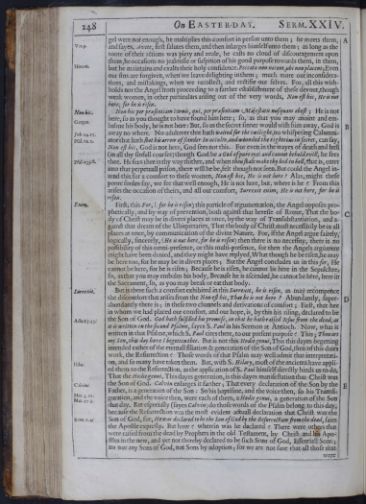 248
On Easter-day.
Serm. XXIVXXV.
gel were not enough, he multiplies this comfort in person unto them; he meets them,
248
On Easter-day.
Serm. XXIVXXV.
gel were not enough, he multiplies this comfort in person unto them; he meets them,
and sayes, Ver. 9. Avete, first salutes them, and then inlarges himself unto them; as long as the
roote of their actions was piety and zeale, he casts no cloud of discouragement upon
them, Hieron. he occasions no jealousie or suspition of his good purpose towards them, in them,
but he maintains and exalts their holy confidence. Peccata non nocent, ubi non placent; Even
our sins are forgiven, when we leave delighting in them; much more our inconsidera-
tions, and mistakings, when we recollect, and rectifie our selves. For, all this with-
holds not the Angel from proceeding to a farther establishment of these devout, though
weak women, in other particulars arising out of the very words, Non est hic, He is not
here, for he is risen.
Non hic per præsentiam carnis,Non hic. qui, per præsentiam Majestatis nusquam abest; He is not
here, Gregor. so as you thought to have found him here; so, as that you may anoint and em-
balme his body, he is not here: But, so as the secret sinner would wish him away, God is
away no where.Job 24.15. No adulterer that hath waited for the twilight, no whispering Calumni-
ator that hath shot his arrow of slander In occulto, and wounded the righteous in secret, can say, Psal. 11.2.
Non est hic, God is not here, God sees not this. For even in the wayes of death and hell
(in all thy sinfull courses) though God be a God of pure eyes and cannot behold evill, he sees
thee.Psal. 139.8. He sees thee in thy way thither, and when thou shalt make thy bed in hell, that is, enter
into that perpetuall prison, there will he be, felt though not seen. But could the Angel in-
tend this for a comfort to these women, Non est hic, He is not here? Alas, might these
poore soules say, we see that well enough, He is not here, but, where is he? From this
arises the occasion of theirs, and all our comfort, Surrexit enim, He is not here, for he is
risen.
First;Enim. this For, (for he is risen) this particle of argumentation, the Angel opposes pro-
phetically, and by way of prevention, both against that heresie of Rome, That the bo-
dy of Christ may be in divers places at once, by the way of Transubstantiation, and a-
gainst that dream of the Ubiquetaries, That the body of Christ must necessarily be in all
places at once, by communication of the divine Nature. For, if the Angel argue fairely,
logically, sincerely, (He is not here, for he is risen) then there is no necessity, there is no
possibility of this omni-presence, or this multi-presence, for then the Angels argument
might have been denied, and they might have replyed, What though he be risen, he may
be here too, for he may be in divers places; But the Angel concludes us in this for, He
cannot be here, for he is risen; Because he is risen, he cannot be here in the Sepulchre,
so, as that you may embalm his body, Because he is ascended, he cannot be here, here in
the Sacrament, so, as you may break or eat that body.
But is there such a comfort exhibited in this Surrexit,Surrexit. he is risen, as may recompence
the discomfort that arises from the Non est hic, That he is not here? Abundantly, super-
abundantly there is; in these two channels and derivations of comfort; First, that hee
in whom we had placed our comfort, and our hope, is, by this his rising, declared to be
the Son of God.Acts 13.33 God hath fulfilled his promise, in that he hath raised Iesus from the dead, as
it is written in the second Psalme, sayes S. Paul in his Sermon at Antioch. Now, what is
written in that Psalme, which S. Paul cites there, to our present purpose? This; Thou art
my Son, this day have I begotten thee. But is not this Hodie genui, This this dayes begetting
intended rather of the eternall filiation & generation of the Son of God, then of this daies
work, the Resurrection? Those words of that Psalm may well admit that interpretati-
on, Hilar. and so many have taken them. But, with S. Hilary, most of the ancients have appli-
ed them to the Resurrection, as the application of S. Paul himself directly binds us to do,
That the Hodie genui, This dayes generation, is this dayes manifestation that Christ was
the Son of God.Calvin. Calvin enlarges it farther; That every declaration of the Son by the
Father, is a generation of the Son: So his baptisme, and the voice then, so his Transfi-
guration, and the voice then, Mat. 3.17. were each of them, a Hodie genui, a generation of the Son
that day. But especially (sayes Calvin) do those words of the Psalm belong to this day, Mat. 17.3.
because the Resurrection was the most evident actuall declaration that Christ was the
Son of God, Rom. 1.4. for, He was declared to be the Son of God by the Resurrection from the dead, saies
the Apostle expresly. But how? wherein was he declared? There were others that
were raised from the dead by Prophets in the old Testament, by Christ and his Apo-
stles in the new, and yet not thereby declared to be such Sons of God, Essentiall Sons;
no nor any Sons of God, not Sons by adoption; for we are not sure that all those that were
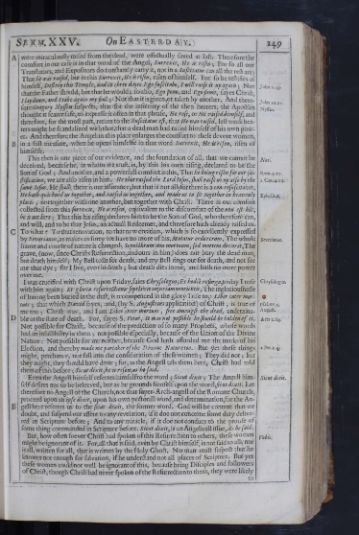 Serm. XXV.
On Easter-day.
249
were miraculously raised from the dead, were effectually saved at last. Therefore the
Serm. XXV.
On Easter-day.
249
were miraculously raised from the dead, were effectually saved at last. Therefore the
comfort in our case is in that word of the Angel, Surrexit, He is risen; For so all our
Translators, and Expositors do constantly carry it, not in a Suscitatus (as all the rest are)
That he was raised, but in this Surrexit, He is risen, risen of himself. For so he testifies of
himself, Destroy this Temple, and in three dayes Ego suscitabo, I will raise it up again;John 2.19 Not
that the Father should, but that he would; so also, Ego pono, and Ego sumo, sayes Christ,
I lay down, and I take again my soul; Not that it is given, or taken by another.John 10.17. And there-
fore Gregory Nyssen suspects, that for the infirmity of the then hearers, the Apostles Nyssen.
thought it scarce safe, to expresse it often in that phrase, He rose, or He raised himself, and
therefore, for the most part, return to the Suscitatus est, that He was raised, lest weak hea-
rers might be scandalized with that, that a dead man had raised himself of his own pow-
er. And therefore the Angel in this place enlarges the comfort to these devout women,
in a full measure, when he opens himselfe in that word Surrexit, He is risen, risen of
himselfe.
This then is one piece of our evidence, and the foundation of all, Nos. that we cannot be
deceived, because he, in whom we trust, is, by this his own rising, declared to be the
Son of God; And another, and a powerfull comfort is this, Rom. 4.25. That he being risen for our ju-
stification, we are also risen in him. He that raised the Lord Iesus, shall raise us up also by the 2 Cor. 4.14.
same Iesus. He shall; there is our assurance; but that is not all; for there is a con-resuscitavit,
Ephes. 2.6. He hath quickned us together, and raised us together, and made us to sit together in heavenly
places; not together with one another, but together with Christ. There is our comfort
collected from this surrexit, He is risen, equivalent to the discomfort of the non est hîc,
he is not here; That this his rising declares him to be the Son of God, who therefore can,
and will, and to be that Jesus, an actuall Redeemer, and therefore hath already raised us.
To what? To that renovation, to that new creation, which is so excellently expressed
by Severianus, as makes us sorry we have no more of his; Mutatur ordorerum,Severianus. The whole
frame and course of nature is changed; Sepulchrum non mortuum, sed mortem devorat, The
grave, (now, since Christs Resurrection, and ours in him) does not bury the dead man,
but death himself; My Bell tolls for death, and my Bell rings out for death, and not for
me that dye; for I live, even in death; but death dies in me, and hath no more power
over me.
I was crucified with Christ upon Friday, saies Chrysologus, Et hodiè resurgo,Chrysologus. to day I rose
with him again; Et gloria resurrectionis sepelivit injuriam morientis, The ingloriousnesse
of having been buried in the dust, is recompenced in the glory I rise to, Liber inter mor-
tuos; that which David sayes, and, (by S. Augustines application) of Christ, Psal. 88.5. is true of
me too; Christ was, and I am Liber inter mortuos, free amongst the dead, August. undetaina-
ble in the state of death. For, sayes S. Peter, It was not possible he should be holden of it.
Acts 2.24. Not possible for Christ, because of the prediction of so many Prophets, whose words
had an infallibility in them; not possible especially, because of the Union of the Divine
Nature: Not possible for me neither, because God hath afforded me the marks of his
Election, and thereby made me partaker of the Divine Nature too.2 Pet. 1.4. But yet these things
might, perchance, not fall into the consideration of these women; They did not; but
they might, they should have done; for, as the Angell tels them here, Christ had told
them of this before; Sicut dixit, he is risen, as he said.
Even the Angell himself referres himself to the word; Sicut dixit;Sicut dixit. The Angell him-
self desires not to be beleeved, but as he grounds himself upon the word, sicut dixit. Let
therefore no Angell of the Church, not that super-Arch-angell of the Romane Church,
proceed upon an ipse dixit, upon his own pectorall word, and determination, for the An-
gell here referres us to the sicut dixit, the former word. God will be content that we
doubt, and suspend our assent to any revelation, if it doe not concerne some duty delive-
red in Scripture before; And to any miracle, if it doe not conduce to the proofe of
some thing commanded in Scripture before. Sicut dixit, is an Angelicall issue, As he said.
But, how often soever Christ had spoken of this Resurrection to others, Vobis. these women
might be ignorant of it. For, all that is said, even by Christ himself, is not said to all; nor
is all, written for all, that is written by the Holy Ghost. No man must suspect that he
knowes not enough for salvation, if he understand not all places of Scripture. But yet
these women could not well be ignorant of this, because being Disciples and followers
of Christ, though Christ had never spoken of the Resurrection to them, they were likely to
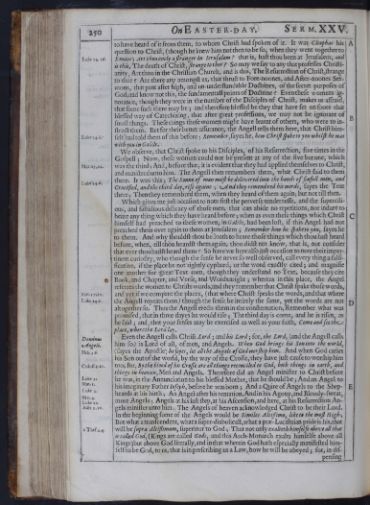 250
On Easter-day.
Serm. XXV.
to have heard of it from them, to whom Christ had spoken of it. It was Cleophas his
250
On Easter-day.
Serm. XXV.
to have heard of it from them, to whom Christ had spoken of it. It was Cleophas his
question to Christ, (though he knew him not then to be so, when they went together to
Emaus) Art thou onely a stranger in Ierusalem? that is, hast thou been at Jerusalem, and
is this,Luke 24.16. The death of Christ, strange to thee? So may we say to any that professes Christi-
anity; Art thou in the Christian Church, and is this, The Resurrection of Christ, strange
to thee? Are there any amongst us, that thrust to Fore-noones, and After-noones Ser-
mons, that pant after high, and un-understandable Doctrines, of the secret purposes of
God, and know not this, the fundamentall points of Doctrine? Even these womens ig-
norance, though they were in the number of the Disciples of Christ, makes us affraid,
that some such there may be; and therefore blessed be they that have set on foote that
blessed way of Catechizing, that after great professions, we may not be ignorant of
small things. These things these women might have learnt of others, who were to in-
struct them.Luke 24.6. But for their better assurance, the Angell tells them here, that Christ him-
self had told them of this before; Remember, sayes he, how Christ spoke to you whilst he was
with you in Galile.
We observe, that Christ spoke to his Disciples, of his Resurrection, five times in the
Gospell; Now, these women could not be present at any of the five but one, which
was the third;Mat. 17.22. And, before that, it is evident that they had applied themselves to Christ,
and ministred unto him. The Angell then remembers them, what Christ said to them
there.Luke 24.6. It was this; The Sonne of man must be delivered into the hands of sinfull men, and
Crucified, and the third day, rise againe; And they remembred his words, sayes the Text
there; Then they remembred them, when they heard of them again; but not till then.
Which gives me just occasion to note first the perverse tendernesse, and the supercili-
ous, and fastidious delicacy of those men, that can abide no repetitions, nor indure to
heare any thing which they have heard before; when as even these things which Christ
himself had preached to these women, in Galile, had been lost, if this Angel had not
preached them over again to them at Jerusalem; Remember how he spake to you, sayes he
to them. And why shouldst thou be loath to heare those things which thou hast heard
before, when, till thou heardst them again, thou didst not know, that is, not consider
that ever thou hadst heard them? So have we here also just occasion to note their imper-
tinent curiosity, who though the sense be never so well observed, call every thing a falsi-
fication, if the place be not rightly cyphard, or the word exactly cited; and magnifie
one another for great Text men, though they understand no Text, because they cite
Book, and Chapter, and Verse, and Words aright; whereas in this place, the Angel
referres the women to Christs words, and they remember that Christ spake those words,
and yet if we compare the places, Mat. 17.22. (that where Christ speaks the words, and that where
the Angell repeats them) though the sense be intirely the same, yet the words are not Luke 24.6.
altogether so. Thus the Angell erects them in the consternation; Remember what was
promised, that in three dayes he would rise; The third day is come, and he is risen, as
he said; and, that your senses may be exercised as well as your faith, Come and see the
place, where the Lord lay.
Even the Angell calls Christ Lord;Dominus
Angeli. and his Lord; for, the Lord, (and the Angell calls
him so) is Lord of all, of men, and Angels. When God brings his Son into the world,
(sayes the Apostle) he sayes, let all the Angels of God worship him. And when God caries Heb. 1.6.
his Son out of the world, by the way of the Crosse, they have just cause to worship him
too, Coloss. 1.20. for, By the blood of his Crosse are all things reconciled to God, both things in earth, and
things in heaven, Men and Angels. Therefore did an Angel minister to Christ before
he was, Luke 1.
Mat. 1.
Luke 2.
Mat. 4.
Luke 22.
Acts 1.10. in the Annunciation to his blessed Mother, that he should be; And an Angel to
his imaginary Father Ioseph, before he was born; And a Quire of Angels to the Shep-
heards at his birth; An Angel after his tentation, And in his Agony, and Bloody-sweat,
more Angels; Angels at his last step, at his Ascension, and here, at his Resurrection An-
gels minister unto him. The Angels of heaven acknowledged Christ to be their Lord.
In the beginning some of the Angels would be Similes Altissimo, like to the most High;
But what a transcendent, what a super-diabolicall, what a præ-Luciferian pride is his, that
will be supra Altissimum,2 Thes. 2.4. superiour to God; That not only exalteth himselfe above all that
is called God, (Kings are called Gods, and this Arch-Monarch exalts himselfe above all
Kings) but above God literally, and in that wherein God hath especially manifested him-
self to be God, to us, that is in prescribing us a Law, how he will be obeyed; for, in dis-
pensing
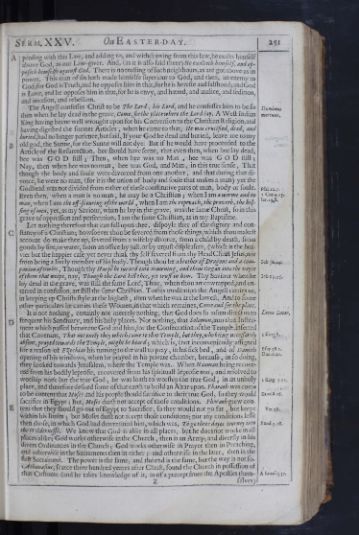 Serm. XXV.
On Easter-day.
251
pensing with this Law, and adding to, and withdrawing from this law, he exalts himself
Serm. XXV.
On Easter-day.
251
pensing with this Law, and adding to, and withdrawing from this law, he exalts himself
above God, as our Law-giver. And, (as it is also said there) He exalteth himself, and op-
poseth himselfe against God. There is no trusting of such neighbours, as are got above us in
power. This man of sin hath made himselfe superiour to God, and then, an enemy to
God; for God is Truth, and he opposes him in that, for he is heresie and falshood; and God
is Love, and he opposes him in that, for he is envy, and hatred, and malice, and sedition,
and invasion, and rebellion.
The Angell confesses Christ to be The Lord, his Lord,Dominus
mortuus. and he confesses him to be so
then when he lay dead in the grave, Come, see the place where the Lord lay. A West Indian
King having beene well wrought upon for his Conversion to the Christian Religion, and
having digested the former Articles, when he came to that, He was crucified, dead, and
buried, had no longer patience, but said, If your God be dead and buried, leave me to my
old god, the Sunne, for the Sunne will not dye. But if he would have proceeded to the
Article of the Resurrection, hee should have seene, that even then, when hee lay dead,
hee was GOD still; Then, when hee was no Man, hee was GOD still;
Nay, then when hee was no man, hee was God, and Man, in this true sense, That
though the body and soule were divorced from one another, and that during that di-
vorce, he were no man, (for it is the union of body and soule that makes a man) yet the
Godhead was not divided from either of these constitutive parts of man, body or soule.
Even then, when a man is no man, he may be a Christian; when I am Psal. 22.7.
1 Cor. 4.13.
Ier. 19.8. a worme and no
man, when I am the off-scouring of the world, when I am the reproach, the proverb, the his-
sing of men, yet, as my Saviour, when he lay in the grave, was the same Christ, so in this
grave of oppression and persecution, I am the same Christian, as in my Baptisme.
Let nothing therefore that can fall upon thee, dispoyle thee of the dignity and con-
stancy of a Christian; howsoever thou be severed from those things, which thou makest
account do make thee up, severed from a wife by divorce, from a child by death, from
goods by fire, or water, from an office by just, or by unjust displeasure, (which is the hea-
vier but the happier case) yet never think thy self severed from thy Head Christ Jesus, nor
from being a lively member of his body.Iob 30.29. Though thou be a brother of Dragons and a com-
panion of Owles, Though thy Harpe be turned into mourning, and thine Organ into the voyce
of them that weepe, nay, Though the Lord kill thee, yet trust in him.Iob 13.15. Thy Saviour when he
lay dead in the grave, was still the same Lord, Thou, when thou art enwrapped, and en-
terred in confusion, art still the same Christian. To this meditation the Angell carries us,
in keeping up Christs style at the highest, then when he was at the lowest, And to some
other particulars he carries these Women, in that which remaines, Come and see the place.
It is not nothing, certainly not meerely nothing, Locus Sacer. that God does so often direct us to
frequent his Sanctuary, and his holy places. Not nothing, that Solomon, into that Instru-
ment which passed betweene God and him, for the Consecration of the Temple, inserted
that Covenant, That not onely they which came to that Temple, but they,1 King. 8. who being necessarily
absent, prayed towards the Temple, might be heard; which is, (not inconveniently) assigned
for a reason of Ezechias his turning to the wall to pray, in his sick bed, Esay 38.2. and of Daniels
opening of his windows, when he prayed in his private chamber, because, in so doing, Dan. 6.10.
they looked towards Jerusalem, where the Temple was. When Naaman being recove-
red from his bodily leprosie, recovered from his spirituall leprosie too, and resolved to
worship none but the true God, he was loath to worship the true God, 2 King. 5.17. in an unholy
place, and therefore desired some of that earth to build an Altar upon. Pharaoh was come
to be content that Moses and his people should sacrifice to their true God, Exod. 8.25. so they would
sacrifice in Egypt; But, Moses durst not accept of those conditions. Pharaoh grew con-
tent that they should go out of Egypt to Sacrifice, so they would not go far, Ver. 28. but keepe
within his limits; but Moses durst not accept those conditions; nor any conditions lesse
then those, in which God had determined him, which was, Exod. 3.18. To go three dayes iourney into
the Wildernesse. We know that God is alike in all places, but he does not worke in all
places alike; God works otherwise in the Church, then in an Army; and diversly in his
divers Ordinances in the Church; God works otherwise in Prayer then in Preaching,
and otherwise in the Sacraments then in either; and otherwise in the later, then in the
first Sacrament. The power is the same, and the end is the same, but the way is not so.
Athanasius, scarce three hundred yeares after Christ, found the Church in possession of
that Custome (and he takes knowledge of it, Athanas. q.37. as of a precept from the Apostles them Z selves)
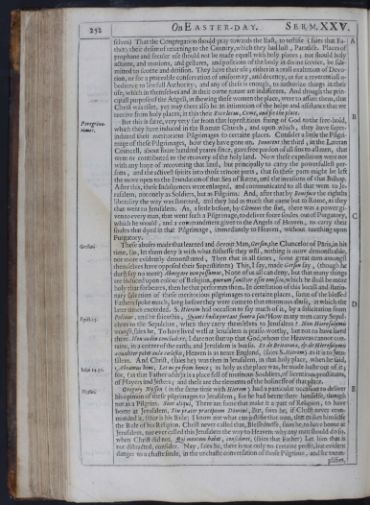 252
On Easter-day.
Serm. XXV.
selves) That the Congregation should pray towards the East, to testifie (saies that Fa-
252
On Easter-day.
Serm. XXV.
selves) That the Congregation should pray towards the East, to testifie (saies that Fa-ther) their desire of returning to the Country, which they had lost, Paradise. Places of
prophane and secular use should not be made equall with holy places; nor should holy
actions, and motions, and gestures, and positions of the body in divine service, be sub-
mitted to scorne and derision. They have their use; either in a reall exaltation of Devo-
tion, or for a peaceable conservation of uniformity, and decency, or for a reverentiall o-
bedience to lawfull Authority; and any of these is enough, to authorize things in their
use, which in themselves and in their owne nature are indifferent. And though the prin-
cipall purpose of the Angell, in shewing these women the place, were to assure them, that
Christ was risen, yet may there also be an intimation of the helpe and assistance that we
receive from holy places, in this their Ecce locus, Come, and see the place.
Peregrina-
tiones. But this is farre, very very far from that superstitious fixing of God to the free-hold,
which they have induced in the Roman Church, and upon which, they have super-
induced their meritorious Pilgrimages to certaine places. Consider a little the Pilgri-
mage of these Pilgrimages, how they have gone on. Innocent the third, in the Lateran
Councell, about foure hundred yeares since, gave free pardon of all sins to all men, that
went or contributed to the recovery of the holy land. Now these expeditions were not
with any hope of recovering that land, but principally to carry the powerfullest per-
sons, and the activest spirits into those remote parts, that so these parts might be left
the more open to the Inundation of that Sea of Rome, and the invasions of that Bishop.
After this, these Indulgences were enlarged, and communicated to all that went to Je-
rusalem, not onely as Soldiers, but as Pilgrims. And, after that by Boniface the eighths
liberality the way was shortned, and they had as much that came but to Rome, as they
that went to Jerusalem. As, a little before, by Clement the sixt, there was a power gi-
ven to every man, that went such a Pilgrimage, to deliver foure soules out of Purgatory,
which he would, and a commandment given to the Angels of Heaven, to carry their
soules that dyed in that Pilgrimage, immediately to Heaven, without touching upon
Purgatory.
Gerson. These abuses made that learned and devout Man, Gerson, the Chancelor of Paris, in his
time, (as, let them deny it with what stifnesse they will, nothing is more demonstrable,
nor more evidently demonstrated, Then that in all times, some great men amongst
themselves have opposed their Superstitions) This, I say, made Gerson say, (though he
durst say no more) Abnegare non possumus, None of us all can deny, but that many things
are induced upon colour of Religion, quorum sanctior esset omissio, which he shall be more
holy that forbeares, then he that performes them. In detestation of this locall and statio-
nary salvation of these meritorious pilgrimages to certaine places, some of the blessed
Fathers spoke much, long before they were come to that enormous abuse, in which the
later times exceeded. S. Hierom had occasion to say much of it, by a solicitation from
Epist. 13. Polinus, and he saies this, Quanti hodie portant funera sua? How many men carry Sepul-
chres to the Sepulchre, when they carry themselves to Jerusalem? Non Hierosolymis
vixisse, saies he, To have lived well at Jerusalem is praise-worthy, but not to have lived
there. Non audeo concludere, I dare not shut up that God, whom the Heavens cannot con-
taine, in a corner of the earth; and Jerusalem is but so. Et de Britannia, & de Hierosolymis
æqualiter patet aula cœlestis, Heaven is as neare England, (saies S. Hierom) as it is to Jeru-
salem. And Christ, (saies he) was then in Jerusalem, in that holy place, when he said,
Iohn 14.31. Abeamus hinc, Let us go from hence; as holy as the place was, he made haste out of it;
for, (as that Father adds) it is a place full of mutinous Souldiers, of licentious prostitutes,
of Players and Jesters; and these are the elements of the holinesse of that place.
Nyssen. Gregory Nyssen (in the same time with Hierom) had a particular occasion to deliver
his opinion of these pilgrimages to Jerusalem; for he had beene there himselfe, though
not as a Pilgrim. Sunt aliqui, There are some that make it a part of Religion, to have
beene at Jerusalem, Sin præter præceptum Domini, But, saies he, if Christ never com-
manded it, (that is his Rule) I know not what can justifie that man, that makes himselfe
the Rule of his Religion. Christ never called that, Blessednesse, saies he, to have beene at
Jerusalem, nor ever called this Jerusalem the way to Heaven; why any man should do so,
when Christ did not, Qui mentem habet, consideret, (saies that Father) Let him that is
not distracted, consider. Nay, saies he, there is not only no certaine profit, but evident
danger to a chaste soule, in the unchaste conversation of those Pilgrims, and he exem-
plifies,
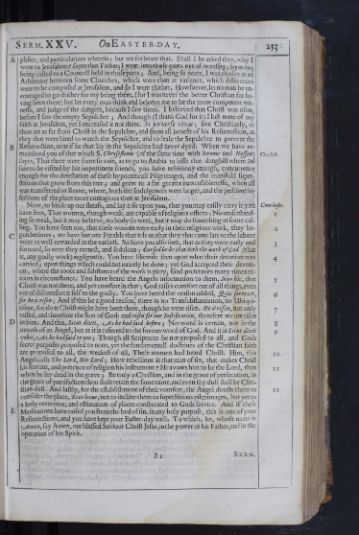 Serm. XXV.
On Easter-day.
253
plifies, and particularizes wherein; but we forbeare that. Shall I be asked then, why I
Serm. XXV.
On Easter-day.
253
plifies, and particularizes wherein; but we forbeare that. Shall I be asked then, why I
went to Jerusalem? sayes that Father; I went into those parts out of necessity, sayes he,
being called to a Councell held in those parts; And, being so neare, I was chosen as an
Arbitrator between some Churches, which were then at variance, which differences
were to be composed at Jerusalem, and so I went thither. Howsoever, let no man be en-
couraged to go thither for my being there, (for I was never the better Christian for ha-
ving been there) but let every man think and beleeve me to be the more competent wit-
nesse, and judge of the dangers, because I saw them. I beleeved that Christ was risen,
before I saw the empty Sepulchre; And though (I thank God for it) I lost none of my
faith at Jerusalem, yet I encreased it not there. Si perversè vivas; live Christianly, or
thou art as far from Christ in the Sepulchre, and from all benefit of his Resurrection, as
they that were hired to watch the Sepulchre, and to seale the Sepulchre to prevent the
Resurrection, or as if he that lay in the Sepulchre had never dyed.Chrysost. When we have re-
membred you of that which S. Chrysostome (of the same time with Ierome and Nyssen)
sayes, That there were some so vain, as to go to Arabia to kisse that dunghill where Iob
sate to be visited by his impertinent friends, you have testimony enough, concurrence
enough for the detestation of these hypocriticall Pilgrimages, and the manifold super-
stitions that grow from this tree; and grew to a far greater inexcusablenesse, when all
was transferred to Rome, where, both the Indulgences were larger, and the pestilent in-
fections of the place more contagious then at Jerusalem.
Now, to binde up our sheafe, and lay it so upon you, that you may easily carry it, Conclusio. you
have seen, That women, though weak, are capable of religious offices; 1 No understand-
ing so weak, but it may beleeve, no body so weak, but it may do something in some cal-
ling. You have seen too, that these women were early in their religious work, 2 they be-
gun betimes; we have but one Parable that tels us, that they that came late to the labour
were as well rewarded as the earliest. So have you also seen, 3 that as they were early and
forward, so were they earnest, and sedulous; Cursed be he that doth the work of God (that
is, any godly work) negligently. You have likewise seen upon what their devotion was
carried; upon things which could not intirely be done; 4 yet God accepted their devoti-
on; where the roote and substance of the work is piety, God pretermits many times er-
rours in circumstance. You have heard the Angels information to them, 5 Non hîc, that
Christ was not there, and yet comfort in that; God raises comfort out of all things, even
out of discomfort it self to the godly. You have heard the reason added, Quia surrexit,
6 for he is risen; And if this be a good reason, there is no Transubstantiation, no Ubiqui-
tisme, for then Christ might have been there, though he were risen. He is risen,7 not only
raised, and therefore the Son of God; and risen for our Iustification, thereferetherefore we are risen
in him. And this, Sicut dixit, As he had said before;8 No word is certain, not in the
mouth of an Angel, but as it is referred to the former word of God. And it is Sicut dixit
vobis, As he had said to you; Though all Scriptures be not proposed to all, 9 and Gods
secret purposes proposed to none, yet the fundamentall doctrines of the Christian faith
are proposed to all, the weakest of all, These women had heard Christ. Him, 10 this
Angel calls The Lord, His Lord; How rebellious is that man of sin, that makes Christ
his servant, and pretence of religion his instrument? He avows him to be the Lord, 11 then
when he lay dead in the grave; Be truly a Christian, and in the grave of persecution, in
the grave of putrifaction thou shalt retain the same name, and even thy dust shall be Chri-
stian dust. And lastly, for the establishment of their comfort, 12 the Angel directs them to
consider the place, Ecce locus, not to incline them to superstitious pilgrimages, but yet to
a holy reverence, and estimation of places consecrated to Gods service. And if these
Meditations have raised you from the bed of sin, in any holy purpose, this is one of your
Resurrections, and you have kept your Easter-day well. To which, he, whose name is
Amen, say Amen, our blessed Saviour Christ Jesus, in the power of his Father, and in the
operation of his Spirit. Z2 Serm.
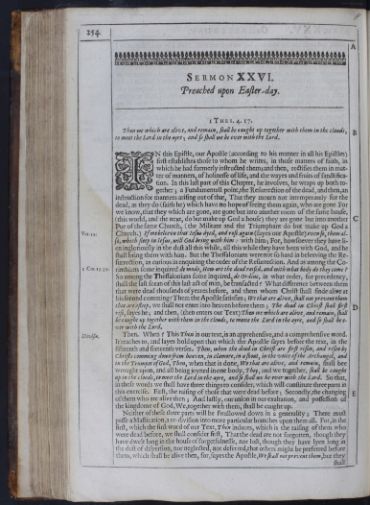 254
254
Sermon XXVI.
Preached upon Easter-day.
1 Thes. 4.17.
Then we which are alive, and remain, shall be caught up together with them in the clouds,
to meet the Lord in the ayre; and so shall we be ever with the Lord.
INIn this Epistle, our Apostle (according to his manner in all his Epistles)
first establishes those to whom he writes, in those matters of faith, in
which he had formerly instructed them; and then, rectifies them in mat-
ter of manners, of holinesse of life, and the wayes and fruits of sanctifica-
tion. In this last part of this Chapter, he involves, he wraps up both to-
gether; a Fundamentall point, the Resurrection of the dead, and then, an
instruction for manners arising out of that, That they mourn not intemperately for the
dead, as they do (saith he) which have no hope of seeing them again, who are gone. For
we know, that they which are gone, are gone but into another room of the same house,
(this world, and the next, do but make up God a house) they are gone but into another
Pue of the same Church, (the Militant and the Triumphant do but make up God a
Church.)Ver. 14. If we beleeve that Iesus dyed, and rose again (sayes our Apostle) even so, them al-
so, which sleep in Iesus, will God bring with him: with him; For, howsoever they have li-
en ingloriously in the dust all this while, all this while they have been with God, and he
shall bring them with him. But the Thessalonians were not so hard in beleeving the Re-
surrection, 1 Cor. 15.35. as curious in enquiring the order of the Resurrection. And as among the Co-
rinthians some inquired de modo, How are the dead raised, and with what body do they come?
So among the Thessalonians some inquired, de Ordine, in what order, for precedency,
shall the last scean of this last act of man, be transacted? What difference between them
that were dead thousands of yeares before, and them whom Christ shall finde alive at
his second comming? Them the Apostle satisfies; We that are alive, shall not prevent them
that are asleep, we shall not enter into heaven before them; The dead in Christ shall first
rise, sayes he; and then, (then enters our Text) Then we which are alive, and remain, shall
be caught up together with them in the clouds, to meete the Lord in the ayre, and so shall be e-
ver with the Lord.
Then.Divisio. When? This Then in our text, is an apprehensive, and a comprehensive word.
It reaches to, and layes hold upon that which the Apostle sayes before the text, in the
fifteenth and sixteenth verses. Then, when the dead in Christ are first risen, and risen by
Christs comming down from heaven, in clamore, in a shout, in the voice of the Archangel, and
in the Trumpet of God, Then, when that is done, We that are alive, and remain, shall bee
wrought upon, and all being joyned in one body, They, and we together, shall be caught
up in the clouds, to meet the Lord in the ayre, and so shall we be ever with the Lord. So that,
in these words we shall have three things to consider, which will constitute three parts in
this exercise. First, the raising of those that were dead before. Secondly, the changing
of them who are alive then; And lastly, our union in our exaltation, and possession of
the kingdome of God, We, together with them, shall be caught up.
Neither of these three parts will be swallowed down in a generality; There must
passe a Mastication, a re-division into more particular branches upon them all. For, in the
first, which the first word of our Text, Then induces, which is the raising of them who
were dead before, we shall consider first, That the dead are not forgotten, though they
have dwelt long in the house of forgetfulnesse, nor lost, though they have lyen long in
the dust of dispersion, nor neglected, nor deferred, that others might be preferred before
them, which shall be alive then, for, sayes the Apostle, We shall not prevent them, but they shall
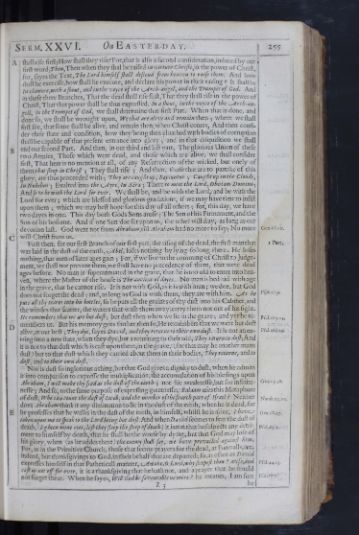 Serm. XXVI.
On Easter-day.
255
shall rise first; How shall they rise? For, that is also a second consideration, induced by our
Serm. XXVI.
On Easter-day.
255
shall rise first; How shall they rise? For, that is also a second consideration, induced by our
first word. Then, Then when they shal be raised in virtute Christi, in the power of Christ,
for, sayes the Text, The Lord himself shall descend from heaven to raise them. And how
shall he exercise, how shall he execute, and declare his power in their raising? It shall be
In clamore, with a shout, and in the voyce of the Arch-angel, and the Trumpet of God. And
in these three Branches, That the dead shall rise first, That they shall rise in the power of
Christ, That that power shall be thus expressed, In a shout, in the voyce of the Arch-an-
gell, in the Trumpet of God, we shall determine that first Part. When that is done, and
done so, we shall be wrought upon, We that are alive and remain then; where we shall
first see, that some shall be alive, and remain then, when Christ comes, And then consi-
der their state and condition, how they being then cloathed with bodies of corruption
shall be capable of that present entrance into glory; and in that disquisition we shall
end our second Part. And then, in our third and last part, The glorious Union of these
two Armies, Those which were dead, and those which are alive, we shall consider
first, That here is no mention at all, of any Resurrection of the wicked, but onely of
them that sleep in Christ; They shall rise; And then, those that are to partake of this
glory, are thus proceeded with; They are caught up, Rapiuntur; Caught up in the Clouds,
In Nubibus; Exalted into the Ayre, In Aëra; There to meet the Lord, Obviam Domino;
And so to be with the Lord for ever. We shall be, and be with the Lord, and be with the
Lord for ever; which are blessed and glorious gradations, if we may have time to insist
upon them; which we may best hope for this day of all others; for, this day, we have
two dayes in one. This day both Gods Sons arose; The Sun of his Firmament, and the
Son of his bosome. And if one Sun doe set upon us, the other will stay, as long as our
devotion last. God went not from Abraham, till Abraham had no more to say;Gen. 18. ult. No more
will Christ from us.
First then, for our first Branch of our first part, the rising of the dead, 1 Part. the first man that
was laid in the dust of the earth, Abel, loses nothing by lying so long there; He loses
nothing, that men of later ages gain; For, if we live to the comming of Christ to Judge-
ment, we shall not prevent them, we shall have no precedency of them, that were dead
ages before. No man is superannuated in the grave, that he is too old to enter into hea-
ven, where the Master of the house is The ancient of dayes. No man is bed-rid with age
in the grave, that he cannot rise. It is not with God, as it is with man; we doe, but God
does not forget the dead; and, as long as God is with them, they are with him.Psal. 56.9. As he
puts all thy teares into his bottles, so he puts all the graines of thy dust into his Cabinet, and
the windes that scatter, the waters that wash them away, carry them not out of his sight.
He remembers that we are but dust; but dust then when we lie in the grave;Psal. 103.14. and yet he re-
members us. But his memory goes farther then so, He remembers that we were but dust
alive, at our best; They dye, sayes David, and they returne to their own dust. It is not an en-
tring into a new state, when they dye, but a returning to their old, They return to dust;Psal. 104.29. And
it is not to that dust which is cast upon them, in the grave, (for that may be another mans
dust) but to that dust which they carried about them in their bodies, They returne, and to
dust; and to their own dust.
Nor is dust so inglorious a thing, but that God gives a dignity to dust, when he admits
it into comparison to expresse the multiplication, the accumulation of his blessings upon
Abraham, I will make thy seed as the dust of the earth; not for weaknesse, Gen. 13.16. but for infinite-
nesse; And so, to the same purpose of expressing greatnesse, Balaam uses this Metaphore
of dust, Who can count the dust of Iacob, and the number of the fourth part of Israel?Numb. 23.10. Neither
does Abraham think it any diminution to lie in the dust of the earth, when he is dead, for
he professes that he walks in the dust of the earth, in himself, whilst he is aliye, Gen. 18.27. I have
taken upon me to speak to the Lord being but dust. And when David seemes to fear the dust of
death, (lighten mine eyes, lest they sleep the sleep of death) it is not that he suspects any detri-
ment to himself by death, that he shall be the worse by dying, Psal. 13.1. but that God may lose of
his glory, when (as he addes there) the enemy shall say, we have prevailed against him.
For, as in the Primitive Church, those that seeme prayers for the dead, at Funeralls, are,
indeed, but thanksgivings to God, in their behalf that are departed; so, as often as David
expresses himself in that Patheticall manner, Awake, O Lord, why sleepest thou? arise,Psal. 44.23. and
cast us not off for ever, it is a thanksgiving that he hath not, and a prayer that he would
not forget them. When he sayes, Will God be favourable no more? he meanes, Psal. 77.7. I am sure Z3 he
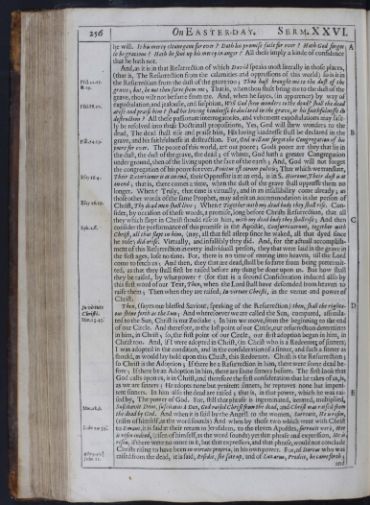 256
On Easter-day.
Serm. XXVI.
he will. Is his mercy cleane gone for ever? Doth his promise faile for ever? Hath God forgot
256
On Easter-day.
Serm. XXVI.
he will. Is his mercy cleane gone for ever? Doth his promise faile for ever? Hath God forgot
to be gracious? Hath he shut up his mercy in anger? All these imply a kinde of confidence
that he hath not.
And, as it is in that Resurrection of which David speaks most literally in those places,
(that is, The Resurrection from the calamities and oppressions of this world) so is it in
the Resurrection from the dust of the grave too;Psal. 22.15.
& 19. Thou hast brought me to the dust of the
grave; but, be not thou farre from me; That is, when thou shalt bring me to the dust of the
grave, thou wilt not be farre from me. And, when he sayes, (in apparence) by way of
expostulation, Psal. 39.10. and jealousie, and suspition, Will God shew wonders to the dead? shall the dead
arise and praise him? shall his loving kindnesse be declared in the grave, or his faishfulnesse in
destruction? All these passionate interrogatories, and vehement expostulations may safe-
ly be resolved into these Doctrinall propositions, Yes, God will shew wonders to the
dead, The dead shall rise and praise him, His loving kindnesse shall be declared in the
grave, Psal. 74.19. and his faithfulnesse in destruction. For, God will not forget the Congregation of his
poore for ever. The poore of this world, are our poore; Gods poore are they that lie in
the dust, the dust of the grave, the dead; of whom, God hath a greater Congregation
under ground, then of the living upon the face of the earth; And, God will not forget
the congregation of his poore for ever. Finitus est eorum pulvis; That which we translate,
Their Extortioner is at an end,Esay 16.4. their Oppressor is at an end, is in S. Hierome, Their dust is at
an end; that is, there comes a time, when the dust of the grave shall oppresse them no
longer. When? Truly, that time is virtually, and in an infallibility come already; as
those other words of the same Prophet, may admit an accommodation in the person of
Christ, Esay 26.19. Thy dead men shall live; When? Together with my dead body they shall rise. Con-
sider, by occasion of those words, a promise, long before Christs Resurrection, that all
they which slept in Christ should rise in him, with my dead body they shall rise; And then
consider the performance of this promise in the Apostle, Eph. 2.6. Consurrexerunt, together with
Christ, all that slept in him, (nay, all that fell asleep since he waked, all that dyed since
he rose) did arise. Virtually, and infallibly they did. And, for the actuall accomplish-
ment of this Resurrection in every individuall person, they that were laid in the grave in
the first ages, lose no time. For, there is no time of entring into heaven, till the Lord
come to fetch us; And then, they that are dead, shall be so farre from being pretermit-
ted, as that they shall first be raised before any thing be done upon us. But how shall
they be raised, by what power? (for that is a second Consideration induced also by
this first word of our Text, Then, when the Lord shall have descended from heaven to
raise them; Then when they are raised, In virtute Christi, in the vertue and power of
Christ.
Then,In virtute
Christi. (sayes our blessed Saviour, speaking of the Resurrection) then, shall the righte-
ous shine forth as the Sun; And wheresoever we are called the Sun, compared, assimila-
ted to the Sun, Christ is our Zodiake; In him we move, from the beginning to the end Mat. 13.43.
of our Circle. And therefore, as the last point of our Circle, our resurrection determines
in him, in Christ; so, the first point of our Circle, our first adoption began in him, in
Christ too. And, if I were adopted in Christ, (in Christ who is a Redeemer of sinners)
I was adopted in the condition, and in the consideration of a sinner, and such a sinner as
should, as would lay hold upon this Christ, this Redeemer. Christ is the Resurrection;
so Christ is the Adoption; If there be a Resurrection in him, there were some dead be-
fore; If there bean Adoption in him, there are some sinners before. The first look that
God casts upon us, is in Christ, and therefore the first consideration that he takes of us, is,
as we are sinners; He adopts none but penitent sinners, he reproves none but impeni-
tent sinners. In him also the dead are raised; that is, in that power, which he was rai-
sed by, The power of God. For, still that phrase is ingeminated, iterated, multiplied,
Suscitavit Deus,Mat. 28.6. suscitatus à Deo, God raised Christ from the dead, and Christ was raised from
the dead by God. And when it is said by the Angell to the women, Surrexit, He is risen,
(risen of himself, as the word sounds) And when by those two which went with Christ
to Emaus,Luke 24.34. it is said at their return to Jerusalem, to the eleven Apostles, surrex it verè, Hee
is risen indeed, (risen of himself, as the word sounds) yet that phrase and expression, He is
risen, if there were no more in it, but that expression, and that phrase, would not conclude
Christs rising to have been in virtute propria, in his own power. For, of Dorcas who was Acts 9.40.
raised from the dead, John 11. it is said, Resedit, she sate up, and of Lazarus, Prodiit, he came forth; and
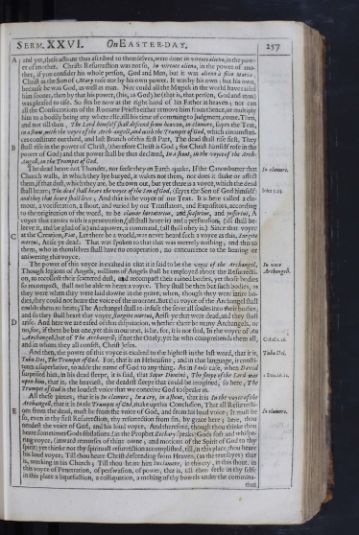 Serm. XXVI.
On Easter-day.
257
and yet, these actions thus ascribed to themselves, were done in virtute aliena, in the pow-
Serm. XXVI.
On Easter-day.
257
and yet, these actions thus ascribed to themselves, were done in virtute aliena, in the pow-er of another. Christs Resurrection was not so, In virtute aliena, in the power of ano-
ther, if you consider his whole person, God and Man, but it was aliena à filio Mariæ;
Christ as the Son of Mary rose not by his own power. It was by his own; but his own,
because he was God, as well as man. Nor could all the Magick in the world have raised
him sooner, then by that his power, (his, as God) he (that is, that person, God and man)
was pleased to rise. So sits he now at the right hand of his Father in heaven; nor can
all the Consecrations of the Romane Priests either remove him from thence, or multiply
him to a bodily being any where else, till his time of comming to Judgment, come. Then,
and not till then, The Lord himself shall descend from heaven, in clamore, sayes the Text,
in a shout, with the voyce of the Arch-angell, and with the Trumpet of God, which circumstan-
ces constitute our third, and last Branch of this first Part, The dead shall rise first, They
shall rise in the power of Christ, (therefore Christ is God; for Christ himself rose in the
power of God) and that power shall be thus declared, In a shout, in the voyce of the Arch-
Angell, in the Trumpet of God.
The dead heare not Thunder, nor feele they an Earth quake.In clamore. If the Canon batter that
Church walls, in which they lye buryed, it wakes not them, nor does it shake or affect
them, if that dust, which they are, be thrown out, but yet there is a voyce, which the dead
shall heare; The dead shall heare, the voyce of the Son of God,Iohn 5.25. (sayes the Son of God himself)
and they that heare shall live; And that is the voyce of our Text. It is here called a cla-
mour, a vociferation, a shout, and varied by our Translators, and Expositors, according
to the origination of the word, to be clamor hortatorius, and suasorius, and jussorins, A
voyce that carries with it a penetration, (all shall heare it) and a perswasion, (all shall be-
leeve it, and be glad of it) and a power, a command, (all shall obey it.) Since that voyce
at the Creation, Fiat, Let there be a world, was never heard such a voyce as this, Surgite
mortui, Arise ye dead. That was spoken to that that was meerely nothing, and this to
them, who in themselves shall have no cooperation, no concurrence to the hearing or
answering this voyce.
The power of this voyce is exalted in that it is said to be the voyce of the Archangel.
In voce
Archangeli. Though legions of Angels, millions of Angels shall be employed about the Resurrecti-
on, to recollect their scattered dust, and recompact their ruined bodies, yet those bodies
so recompact, shall not be able to heare a voyce. They shall be then but such bodies, as
they were when they were laid downe in the grave, when, though they were intire bo-
dies, they could not heare the voice of the mourner. But this voyce of the Archangel shall
enable them to heare; The Archangel shall re-infuse the severall soules into their bodies,
and so they shall heare that voyce, Surgite mortui, Arise ye that were dead, and they shall
arise. And here we are eased of that disputation, whether there be many Archangels, or
no, for, if there be but one, yet this in our text, is he, for, it is not said, In the voyce of An
Archangell, but of The Archangell; if not the Onely, yet he who comprehends them all,
Colos. 1.16. and in whom they all consist, Christ Jesus.
And then, the power of this voyce is exalted to the highest in the last word, that it is, Tuba Dei.
Tuba Dei, The Trumpet of God. For, that is an Hebraisme, and in that language, it consti-
tutes a superlative, to adde the name of God to any thing. As in Sauls case, when David
surprised him, in his dead sleepe, it is said, that Sopor Domini,2 Sam. 26.12. The sleepe of the Lord was
upon him, that is, the heaviest, the deadest sleepe that could be imagined, so here, The
Trumpet of God is the loudest voice that we conceive God to speake in.
All these pieces, that it is In clamore, In a cry, in a shout, that it is In the voyce of the
Archangell, that it is In the Trumpet of God, make up this Conclusion, That all Resurrecti-
ons from the dead, must be from the voice of God, and from his loud voice;In clamore. It must be
so, even in thy first Resurrection, thy resurrection from sin, by grace here; here, thou
needest the voice of God, and his loud voyce. And therefore, though thou thinke thou
heare sometimes Gods sibilations, (as the Prophet Zechary speaks) Gods soft and whispe-
ring voyce, (in ward remorses of thine owne; and motions of the Spirit of God to thy
spirit) yet thinke not thy spirituall resurrection accomplished, till, in this place, thou heare
his loud voyce; Till thou heare Christ descending from Heaven, (as the text sayes) that
is, working in his Church; Till thou heare him In clamore, in this cry, in this shout, in
this voyce of Penetration, of perswasion, of power, that is, till thou feele in thy selfe
in this place a liquefaction, a colliquation, a melting of thy bowels under the commina-
tion
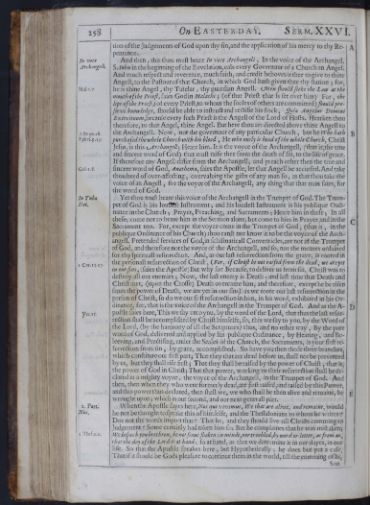 258
On Easter-day.
Serm. XXVI.
tion of the Judgements of God upon thy sin, and the application of his mercy to thy Re-
258
On Easter-day.
Serm. XXVI.
tion of the Judgements of God upon thy sin, and the application of his mercy to thy Re-pentance.
And then, In voce Archangeli. this thou must heare In voce
Archangeli, In the voice of the Archangel.
S. Iohn in the beginning of the Revelation, cals every Governour of a Church an Angel.
And much respect and reverence, much faith, and credit behoves it thee to give to thine
Angell, to the Pastour of that Church, in which God hath given thee thy station; for,
he is thine Angel, Mal. 2.7. thy Tutelar, thy guardian Angell. Men should seeke the Law at the
mouth of the Priest, saies God in Malachi; (of that Priest that is set over him) For, the
lips of the Priest, (of every Priest, to whom the soules of others are committed) should pre-
serve knowledge, should be able to instruct and rectifie his flock, Quia Angelus Domini
Exercituum, because every such Priest is the Angell of the Lord of Hosts. Hearken thou
therefore, to that Angel, thine Angel. But here thou art directed above thine Angell to
the Archangell.Acts 20.28. Now, not the governour of any particular Church, but he Who hath
purchased the whole Church with his blood, He who onely is head of the whole Church, Christ Ephes. 5.23.
Jesus, is this Archangell; Heare him. It is the voyce of the Archangell, (that is, the trne
and sincere word of God) that must raise thee from the death of sin, to the life of grace.
If therefore any Angell differ from the Archangell, and preach other then the true and
sincere word of God, Gal. 1.8. Anathema, saies the Apostle, let that Angell be accursed. And take
thou heed of over-affecting, overvaluing the gifts of any man so, as that thou take the
voice of an Angell, for the voyce of the Archangell, any thing that that man saies, for
the word of God.
Yet thou must heare this voice of the Archangell in the Trumpet of God.In Tuba
Dei. The Trum-
pet of God is his loudest Instrument; and his loudest Instrument is his publique Ordi-
nance in the Church; Prayer, Preaching, and Sacraments; Heare him in these, In all
these; come not to heare him in the Sermon alone, but come to him in Prayer, and in the
Sacrament too. For, except the voyce come in the Trumpet of God, (that is, in the
publique Ordinance of his Church) thou canst not know it to be the voyce of the Arch-
angell. Pretended services of God, in schismaticall Conventicles, are not in the Trumpet
of God, and therefore not the voyce of the Archangell, and so, not the meanes ordained
for thy spirituall resurrection. And, as our last resurrection from the grave, is rooted in
the personall resurrection of Christ, 1 Cor. 15.17. (For, if Christ be not raised from the dead, we are yet
in our sins, (saies the Apostle) But why so? Because, to deliver us from sin, Christ was to
destroy all our enemies; Now, the last enemy is Death; and last time that Death and
Christ met, (upon the Crosse) Death overcame him, and therefore, except he be risen
from the power of Death, we are yet in our sins) as we roote our last resurrection in the
person of Christ, so do we our first resurrection in him, in his word, exhibited in his Or-
dinance, for, that is the voice of the Archangell in the Trumpet of God. And as the A-
postle saies here, Ver. 15. This we say unto you, by the word of the Lord, that thus the last resur-
rection shall be accomplished by Christ himselfe, so, this we say to you, by the Word of
the Lord, (by the harmony of all the Scriptures) thus, and no other way, By the pure
word of God, delivered and applied by his publique Ordinance, by Hearing, and Be-
leeving, and Practising, under the Seales of the Church, the Sacraments, is your first re-
surrection from sin, by grace, accomplished. So have you then those three branches,
which constitute our first part; That they that are dead before us, shall not be prevented
by us, but they shall rise first; That they shall be raised by the power of Christ, that is,
the power of God in Christ; That that power, working to their resurrection shall be de-
clared in a mighty voyce, the voyce of the Archangell, in the Trumpet of God. And
then, then when they who were formerly dead, are first raised, and raised by this Power,
and this power thus declared, then shall we, we who shall be then alive and remaine, be
wrought upon; which is our second, and our next generall part.
When the Apostle sayes here, 2. Part. Nos qui vivimus, We that are alive, and remaine, would
he not be thought to speake this of himselfe, and the Thessalonians to whom he writes? Nos.
Doe not the words import that? That he, and they should live till Christs comming to
Judgement? Some certainly had taken him so; But he complaines that he was mistaken;
We beseech you brethren,2 Thes. 2.2. be not soone shaken in minde, nor troubled, by word or letter, as from us,
that the day of the Lord is at hand; so at hand, as that we determine it in our dayes, in our
life. So that the Apostle speakes here, but Hypothetically; he does but put a case,
That if it should be Gods pleasure to continue them in the world, till the comming of his Son
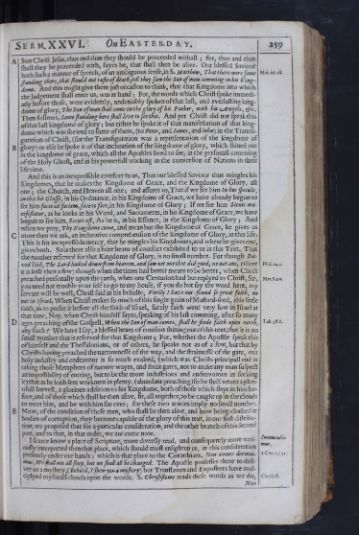 Serm. XXVI.
On Easter-day.
259
Son Christ Jesus, thus and thus they should be proceeded withall; for, thus and thus
Serm. XXVI.
On Easter-day.
259
Son Christ Jesus, thus and thus they should be proceeded withall; for, thus and thus
shall they be proceeded with, sayes he, that shall then be alive. Our blessed Saviour
hath such a manner of speech, of an ambiguous sense, in S. Matthew,Mat. 16.28. That there were some
standing there, that should not taste of death, till they saw the Son of man comming in his King-
dome. And this might give them just occasion to think, that that Kingdome into which
the Judgement shall enter us, was at hand; For, the words which Christ spoke immedi-
atly before those, were evidently, undeniably spoken of that last, and everlasting king-
dome of glory, The Son of man shall come in the glory of his Father, with his Angels, &c.
Then follows, Some standing here shall live to see this. And yet Christ did not speak this
of that last kingdome of glory; but either he spoke it of that manifestation of that king-
dome which was shewed to some of them, (to Peter, and Iames, and Iohn) in the Transfi-
guration of Christ, (for the Transfiguration was a representation of the kingdome of
glory) or else he spoke it of that inchoation of the kingdome of glory, which shined out
in the kingdome of grace, which all the Apostles lived to see, in the personall comming
of the Holy Ghost, and in his powerfull working in the conversion of Nations in their
life time.
And this is an inexpressible comfort to us, That our blessed Saviour thus mingles his
Kingdomes, that he makes the Kingdome of Grace, and the Kingdome of Glory, all
one; the Church, and Heaven all one; and assures us, That if we see him In hoc speculo,
in this his Glasse, in his Ordinance, in his Kingdome of Grace, we have already begun to
see him facie ad faciem, face to face, in his Kingdome of Glory; If we see him Sicuti ma-
nifestatur, as he looks in his Word, and Sacraments, in his Kingdome of Grace, we have
begun to see him, Sicuti est, As he is, in his Essence, in the Kingdome of Glory; And
when we pray, Thy Kingdome come; and mean but the Kingdome of Grace, he gives us
more then we ask, an inchoative comprehension of the Kingdome of Glory, in this life.
This is his inexpressible mercy, that he mingles his Kingdomes, and where he gives one,
gives both. So is there also a faire beam of comfort exhibited to us in this Text, That
the number reserved for that Kingdome of Glory, is no small number. For though Da-
vid said, The Lord looked down from heaven, and saw not one that did good, no not one,Psal. 14.2. (there
it is lesse then a few) though when the times had better means to be better, when Christ
preached personally upon the earth, when one Centurion had but replyed to Christ, Sir,
Mat. 8.10. you need not trouble your self to go to my house, if you do but say the word here, my
servant will be well, Christ said in his behalfe, Verily I have not found so great faith, no
not in Israel; When Christ makes so much of this single grain of Mustard-seed, this little
faith, as to prefer it before all the faith of Israel, surely faith went very low in Israel at
that time, Nay, when Christ himself sayes, speaking of his last comming, after so many
ages preaching of the Gospell, When the Son of man comes, shall he finde faith upon earth,
Luk. 18.8. any faith? We have I say, a blessed beam of comfort shining out of this text, that it is no
small number that is reserved for that Kingdome; For, whether the Apostle speak this
of himself and the Thessalonians, or of others, he speaks not as of a few, but that by
Christs having preached the narrownesse of the way, and the straitnesse of the gate, our
holy industry and endeavour is so much exalted, (which was Christs principall end in
taking those Metaphors of narrow wayes, and strait gates, not to make any man suspect
an impossibility of entring, but to be the more industrious and endeavorous in seeking
it) that as he hath sent workmen in plenty, (abundant preaching) so he shall return a plen-
tifull harvest, a glorious addition to his Kingdome, both of those which slept in him be-
fore, and of those which shall be then alive, fit, all together, to be caught up in the clouds
to meet him, and be with him for ever; for these two armies imply no small number.
Now, of the condition of these men, who shall be then alive, and how being clothed in
bodies of corruption, they become capable of the glory of this text, in our first distribu-
tion, we proposed that for a particular consideration, and the other branch of this second
part, and to that, in that order, we are come now.
I scarce know a place of Scripture, more diversly read, Immutabi-
mur. and consequently more vari-
ously interpreted then that place, which should most enlighten us, in this consideration
presently under our hands; which is that place to the Corinthians, 1 Cor. 15.51. Non omnes dormie-
mus, We shall not all sleep, but we shall all be changed. The Apostle professes there to deli-
ver us a mystery, (Behold, I shew you a mystery) but Translators and Expositors have mul-
tiplyed mysticall clouds upon the words. S. Chrysostome reads these words as we do, Chrysost. Non
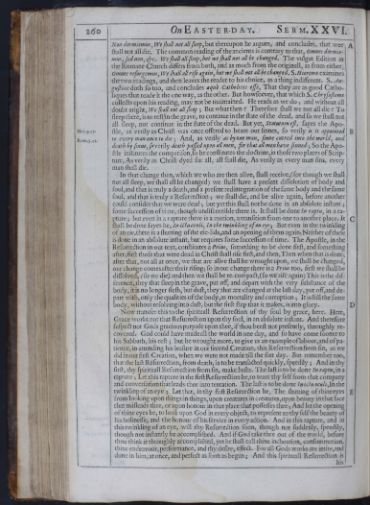 260
On Easter-day.
Serm. XXVI.
Non dormiemus, We shall not all sleep, but thereupon he argues, and concludes, that wee
260
On Easter-day.
Serm. XXVI.
Non dormiemus, We shall not all sleep, but thereupon he argues, and concludes, that wee
shall not all die. The common reading of the ancients is contrary to that, Omnes dormie-
mus, sed non, &c. We shall all sleep, but we shall not all be changed. The vulgat Edition in
the Romane Church differs from both, and as much from the originall, as from either,
Omnes resurgemus, We shall all rise again, but we shall not all be changed. S. Hierome examines
the two readings, and then leaves the reader to his choice, as a thing indifferent. S. Au-
gustine doth so too, and concludes aquè Catholicos esse, That they are as good Catho-
liques that reade it the one way, as the other. But howsoever, that which S. Chrysostome
collects upon his reading, may not be maintained. He reads as we do; and without all
doubt aright, We shall not all sleep; But what then? Therefore shall we not all die? To
sleep there, is to rest in the grave, to continue in the state of the dead, and so we shall not
all sleep, not continue in the state of the dead. But yet, Statutum est, sayes the Apo-
stle, Heb. 9.27. as verily as Christ was once offered to beare our sinnes, so verily is it appointed
to every man once to die;Rom. 5.12. And, as verily as by one man, sinne entred into the world, and
death by sinne, so verily death passed upon all men, for that all men have sinned; So the Apo-
stle institutes the comparison, so he constitutes the doctrine, in those two places of Scrip-
ture, As verily as Christ dyed for all, all shall die, As verily as every man sins, every
man shall die.
In that change then, which we who are then alive, shall receive, (for though we shall
not all sleep, we shall all be changed) we shall have a present dissolution of body and
soul, and that is truly a death, and a present redintegration of the same body and the same
soul, and that is truly a Resurrection; we shall die, and be alive again, before another
could consider that we were dead; but yet this shall not be done in an absolute instant;
some succession of time, though undiscernible there is. It shall be done In raptu, in a ra-
pture; but even in a rapture there is a motion, a transition from one to another place. It
shall be done sayes he, In ictuoculi, In the twinkling of an eye; But even in the twinkling
of an eie, there is a shutting of the eie-lids, and an opening of them again; Neither of these
is done in an absolute instant, but requires some succession of time. The Apostle, in the
Resurrection in our text, constitutes a Prius, something to be done first, and something
after; first those that were dead in Christ shall rise first, and then, Then when that is done,
after that, not all at once, we that are alive shall be wrought upon, we shall be changed,
our change comes after their rising; so in our change there is a Prius too, first we shall be
dissolved, (so we die) and then we shall be re-compact, (so we rise again) This is the dif-
ference, they that sleep in the grave, put off, and depart with the very substance of the
body, it is no longer flesh, but dust, they that are changed at the last day, put off, and de-
part with, only the qualities of the body, as mortality and corruption; It is still the same
body, without resolving into dust, but the first step that it makes, is into glory.
Now transfer this to the spirituall Resurrection of thy soul by grace, here. Here,
Grace works not that Resurrection upon thy soul, in an absolute instant. And therefore
suspect not Gods gracious purpose upon thee, if thou beest not presently, throughly re-
covered. God could have made all the world in one day, and so have come sooner to
his Sabbath, his rest; but he wrought more, to give us an example of labour, and of pa-
tience, in attending his leasure in our second Creation, this Resurrection from sin, as we
did in our first Creation, when we were not made till the sixt day. But remember too,
that the last Resurrection, from death, is to be transacted quickly, speedily; And in thy
first, thy spirituall Resurrection from sin, make haste. The last is to be done In raptu, in a
rapture; Let this rapture in the first Resurrection be, to teare thy self from that company
and conversation that leads thee into tentation. The last is to be done Inictu oculi, In the
twinkling of an eye; Let that, in thy first Resurrection be, The shutting of thine eyes
from looking upon things in things, upon creatures in creatures, upon beauty in that face
that misleads thee, or upon honour in that place that possesses thee; And let the opening
of thine eyes be, to look upon God in every object, to represent to thy self the beauty of
his holinesse, and the honour of his service in every action. And in this rapture, and in
this twinkling of an eye, will thy Resurrection soon, though not suddenly, speedily,
though not instantly be accomplished. And if God take thee out of the world, before
thou think it throughly accomplished, yet he shall call thine inchoation, consummation,
thine endeavour, performance, and thy desire, effect. For all Gods works are intire, and
done in him, at once, and perfect as soon as begun; And this spirituall Resurrection is his
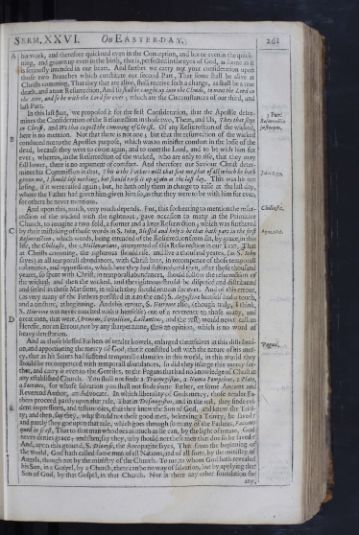 Serm. XXVI.
On Easter-day.
261
his work, and therefore quickned even in the Conception, and borne even in the quick-
Serm. XXVI.
On Easter-day.
261
his work, and therefore quickned even in the Conception, and borne even in the quick-ning, and grown up even in the birth, that is, perfected in the eyes of God, as soone as it
is seriously intended in our heart. And farther we carry not your consideration upon
those two Branches which constitute our second Part, That some shall be alive at
Christs comming, That they that are alive, shall receive such a change, as shall be a true
death, and a true Resurrection, And so shall be caught up into the Clouds, to meet the Lord in
the Aire, and so be with the Lord for ever; which are the Circumstances of our third, and
last Part.
In this last part, we proposed it for the first Consideration, 3 Part. that the Apostle deter-
mines the Consideration of the Resurrection in those two, Them, and Us, Resurrectio
justorum. They that slept
in Christ, and We that expect the comming of Christ. Of any Resurrection of the wicked,
here is no mention. Not that there is not one; but that the resurrection of the wicked
conduced not to the Apostles purpose, which was to minister comfort in the losse of the
dead, because they were to come again, and to meet the Lord, and to be with him for
ever; whereas, in the Resurrection of the wicked, who are only to rise, that they may
fall lower, there is no argument of comfort. And therefore our Saviour Christ deter-
mines his Commission in that, This is the Fathers will that sent me,John 6.39. that of all which he hath
given me, I should lose nothing, but should raise it up again at the last day. This was his not
losing, if it were raised again; but, he hath only them in charge to raise at the last day,
whom the Father had given him; given him so, as that they were to be with him for ever;
for others he never mentions.
And upon this, much, very much depends. For, Chiliastæ. this forbearing to mention the resur-
rection of the wicked with the righteous, gave occasion to many in the Primitive
Church, to imagine a two-fold, a former and a later Resurrection; which was furthered
by their mistaking of those words in S. Iohn,Apoc. 20.6. Blessed and holy is he that hath part in the first
Resurrection; which words, being intended of the Resurrection from sin, by grace, in this
life, the Chiliasts, the Millenarians, interpreted of this Resurrection in our Text, That
at Christs comming, the righteous should rise, and live a thousand yeares, (as S. Iohn
sayes) in all temporall abundances, with Christ here, in recompence of those temporall
calamities, and oppressions, which here they had suffered; and then, after those thousand
yeares, so spent with Christ, in temporall abundances, should follow the resurrection of
the wicked; and then the wicked, and the righteous should be disposed and distributed
and setled in those Mansions, in which they should remain for ever. And of this errour,
(as very many of the Fathers persisted in it to the end) S. Augustine himself had a touch,
and a tincture, at beginning. And this errour, S. Hierome also, (though truly, I think,
S. Hierome was never touched with it himselfe) out of a reverence to those many, and
great men, that were, (Irenaeus, Tertullian, Lactantius, and the rest) would never call an
Heresie, nor an Errour, nor by any sharper name, then an opinion, which is no word of
heavy detestation.
And as those blessed Fathers of tender bowels, Pagani. enlarged themselves in this distributi-
on, and apportioning the mercy of God, that it consisted best with the nature of his mer-
cy, that as his Saints had suffered temporall calamities in this world, in this world they
should be recompenced with temporall abundances, so did they inlarge this mercy far-
ther, and carry it even to the Gentiles, to the Pagans that had no knowledge of Christ in
any established Church. You shall not finde a Trumegistus, a Numa Pompilius, a Plato,
a Socrates, for whose salvation you shall not finde some Father, or some Ancient and
Reverend Author, an Advocate. In which liberality of Gods mercy, those tender Fa-
thers proceed partly upon that rule, That in Trismegistus, and in the rest, they finde evi-
dent impressions, and testimonies, that they knew the Son of God, and knew the Trini-
ty; and then, say they, why should not these good men, beleeving a Trinity, be saved?
and partly they goe upon that rule, which goes through so many of the Fathers, Facienti
quod in se est, That to that man who does as much as he can, by the light of nature, God
never denies grace; and then, say they, why should not these men that doe so be saved?
And, upon this ground, S. Dionyse, the Areopagite sayes, That from the beginning of
the world, God hath called some men of all Nations, and of all sorts, by the ministry of
Angels, though not by the ministry of the Church. To me, to whom God hath revealed
his Son, in a Gospel, by a Church, there can be no way of salvation, but by applying that
Son of God, by that Gospel, in that Church. Nor is there any other foundation for any,
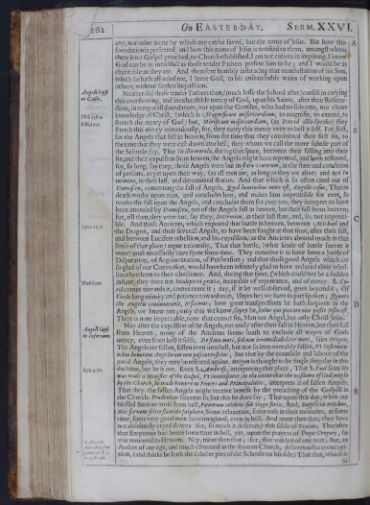 262
On Easter-day.
Serm. XXVI.
any, nor other name by which any can be saved, but the name of Jesus. But how this
262
On Easter-day.
Serm. XXVI.
any, nor other name by which any can be saved, but the name of Jesus. But how this
foundation is presented, and how this name of Jesus is notified to them, amongst whom
there is no Gospel preached, no Church established, I am not curious in inquiring. I know
God can be as mercifull as those tender Fathers present him to be; and I would be as
charitable as they are. And therefore humbly imbracing that manifestation of his Son,
which he hath afforded me, I leave God, to his unsearchable waies of working upon
others, without farther inquisition.
Neither did those tender Fathers then, Angeli lapsi
in Cœis. (much lesse the School after) consist in carying
this overflowing, and inexhaustible mercy of God, upon his Saints, after their Resurre-
ction, in temporall abundances, nor upon the Gentiles, who had no solemne, nor cleare
knowledge of Christ, Psal. 138.2. (which is Magnificare misericordiam, to magnifie, to extend, to
stretch the mercy of God) but, Mirificant misericordiam, (as David also speaks) they Psal. 17.7.
stretch this mercy miraculously, for, they carry this mercy even to hell it self. For, first,
for the Angels that fell in heaven, from the time that they committed their first sin, to
the time that they were cast down into hell, they whom we call the more subtile part of
the Schoole, say, That In illa morula, during that space, between their falling into their
sin, and their expulsion from heaven, the Angels might have repented, and been restored,
for, so long, say they, those Angels were but in statu viatorum, in the state and condition
of persons, as yet upon their way, (as all men are, as long as they are alive) and not In
termino, in their last, and determined station. And that which is so often cited out of
Damascen, concerning the fall of Angels, Quod hominibus mors est, Angelis casus, That as
death works upon man, and concludes him, and makes him impenitible for ever, so
works the fall upon the Angels, and concludes them for ever too, they interpret to have
been intended by Damascen, not of the Angels fall in heaven, but their fall from heaven;
for, till then, they were not, say they, Intermino, in their last state, and, so, not impeniti-
ble.Apoc. 12.7. And those Ancients, which expound that battle in heaven, between Michael and
the Dragon, and their severall Angels, to have been fought at that time, after their fall,
and between Lucifers rebellion, and his expulsion, (as the Ancients abound much in that
sense of that place) argue rationally, That that battle, (what kinde of battle soever it
were) must necessarily have spent some time. They conceive it to have been a battle of
Disputation, of Argumentation, of Perswasion; and that those good Angels which are
so glad of our Conversion, would have been infinitely glad to have reduced their rebel-
lious brethren to their obedience. And, during that time, (which could not be a sudden
instant) they were not Inadeptivi gratiæ,Hiesolom. incapable of repentance, and of mercy. S. Cy-
ril comes towards it, comes neare it; nay, if it be well observed, goes beyond it; Of
Gods longanimity and patience toward man, (sayes he) we have in part spoken; Quanta
ille Angelis condonaverit, nescimus; how great transgressions he hath forgiven in the
Angels, we know not; only this we know, sayes he, Solus qui peccdre non possit Iesus est,
There is none impeccable, none that cannot sin, Man nor Angel, but only Christ Jesus.
Nay after the expulsion of the Angels, Angeli lapsi
in Infernum. not onely after their fall in Heaven, but their fall
from Heaven, many of the Ancients seeme loath to exclude all wayes of Gods
mercy, even from hell it selfe. De statu moti, sed non irremediabiliter moti, saies Origen,
The Angels are fallen, fallen even into hell, but not so irrecoverably fallen, Vt Institutio-
nibus bonorum Angelorum non possint restitui, But that by the counsaile and labour of the
good Angels, they may be restored againe. Origen is thought to be single, singular in this
doctrine, Eph. 3.10. but he is not. Even S. Ambrose, interpreting that place, That S. Paul saies He
was made a Minister of the Gospel, Vt innotesceret, to the intent that the wisdome of God, might
by the Church, be made knowne to Powers and Principalities, interprets it of fallen Angels;
That they, the fallen Angels might receive benefit by the preaching of the Gospell in
the Church. Prudentius saies not so, but this he does say, That upon this day, when our
blessed Saviour arose from hell, Pœnarum celebres sub Styge feriæ, And, Suppliciis mitibus,
Nee forvent solito flumina sulphure, Some relaxation, some ease in their torments, at some
time, some very good men have imagined, even in hell. And more then that; they have
not absolutely cryed downe (for, so much it deserves) that fable of Traian; That after
that Emperour had beene some time in hell, yet, upon the prayers of Pope Gregory, he
was removed to Heaven.Collius de
animabus Pa-
ganorum l. 1.
c.13. fo.48. Nay, more then that; (for, that was but of one man) But, an
Author of our age, and much esteemed in the Roman Church, delivers as his owne opi-
nion, (and thinks he hath the subtiler part of the Schoole on his side) That that, which is so
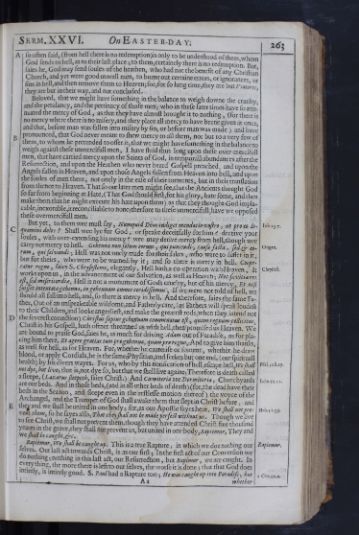 Serm. XXVI.
On Easter-day.
263
so often said, (from hell there is no redemption) is only to be understood of them, whom
Serm. XXVI.
On Easter-day.
263
so often said, (from hell there is no redemption) is only to be understood of them, whom
God sends to hell, as to their last place; to them, certainely there is no redemption. But,
saies he, God may send soules of the heathen, who had not the benefit of any Christian
Church, and yet were good morall men, to burne out certaine errors, or ignorances, or
sins in hell, and then remove them to Heaven; for, for so long time, they are but Viatores,
they are but in their way, and not concluded.
Beloved, that we might have something in the balance to weigh downe the curelty,
and the petulancy, and the pertinacy of those men, who in these later times have so atte-
nuated the mercy of God, as that they have almost brought it to nothing, (for there is
no mercy where there is no misery, and they place all mercy to have beene given at once,
and that, before man was fallen into misery by sin, or before man was made) and have
pronounced, that God never meant to shew mercy to all them, nor but to a very few of
them, to whom he pretended to offer it, that we might have something in the balance to
weigh against these unmercifull men, I have staid thus long upon these over-mercifull
men, that have carried mercy upon the Saints of God, in temporall abundances after the
Resurrection, and upon the Heathen who never heard Gospell preached, and upon the
Angels fallen in Heaven, and upon those Angels fallen from Heaven into hell, and upon
the soules of men there, not onely in the ease of their torments, but in their translation
from thence to Heaven. That so our later men might see, that the Ancients thought God
so far from beginning at Hate, (That God should first, for his glory, hate some, and then
make them that he might execute his hate upon them) as that they thought god impla-
cable, inexorable, irreconciliable to none; therfore to these unmercifull, have we opposed
these overmercifull men.
But yet, to them wee must say, Numquid Deus indiget mendacio vestro,Iob 13.7. ut pro eo Io-
quamini dolos? Shall wee lye for God, or speake deceitfully for him? deceive your
soules, with over-extending his mercy? wee may derive mercy from hell, though wee
carry not mercy to hell. Gehenna non solum eorum, qui puniendi, causa facta,Origen. sed & eo-
rum, qui salvandi; Hell was not onely made for their sakes, who were to suffer in it,
but for theirs, who were to be warned by it; and so there is mercy in hell. Coope-
ratur regno, saies S. Chrysostome, elegantly, Hell hath a co-operation with Heaven, Chrysost. It
works upon us, in the advancement of our Salvation, as well as Heaven; Nec sævitiæres
est, sed misericordiæ, Hell is not a monument of Gods cruelty, but of his mercy, Et nisi
fuisset intentata gehenna, in gehennam omnes cecidissemus, If we were not told of hell, we
should all fall into hell; and, so there is mercy in hell. And therefore, saies the same Fa-
ther, Out of an unspeakeable wisdome, and Fatherly care, (as Fathers will speak loudest
to their Children, and looke angerliest, and make the greatest rods, when they intend not
the severest correction) Christus sæpius gehennam comminatus est, quam regnum pollicitus,
Christ in his Gospell, hath oftner threatned us with hell, then promised us Heaven. We
are bound to praise God, saies he, as much for driving Adam out of Paradise, as for pla-
cing him there, Et agere gratias tam progehenna, quam pro regno, And to give him thanks,
as well for hell, as for Heaven. For, whether he cauterise or foment, whether he draw
blood, or apply Cordials, he is the same Physitian, and seekes but one end, (our spirituall
health) by his divers wayes. For us, who by this notification of hell, escape hell, Psal. 118.17. We shall
not dye, but live; that is, not dye so, but that we shall live againe; Therefore is death called
a sleepe, (Lazarus sleepeth, saies Christ.) And Cœmiteria are Dormitoria,Iohn 11.11. Churchyards
are our beds. And in those beds, (and in all other beds of death) (for, the dead have their
beds in the Sea too, and sleepe even in the restlesse motion thereof) the voyce of the
Archangel, and the Trumpet of God shall awake them that slept in Christ before, and
they and we shall be united in one body; for, as our Apostle sayes here, Heb. 11.39. We shall not pre-
vent them, so he sayes also, That they shall not be made perfect without us. Though we live
to see Christ, we shall not prevent them, though they have attended Christ five thousand
yeares in the grave, they shall not prevent us, but united in one body, Rapiemur, They and
we shall be caught, &c.
Rapiemur, We shall be caught up. This is a true Rapture, Rapiemur. in which we doe nothing our
selves. Our last act towards Christ, is as our first; In the first act of our Conversion we
do nothing; nothing in this last act, our Resurrection, but Rapimur, we are caught. In
everything, the more there is left to our selves, the worse it is done; that that God does
intirely, is intirely good. S. Paul had a Rapture too; He was caught up into Paradise;2 Cor. 12.4. but Aa whether
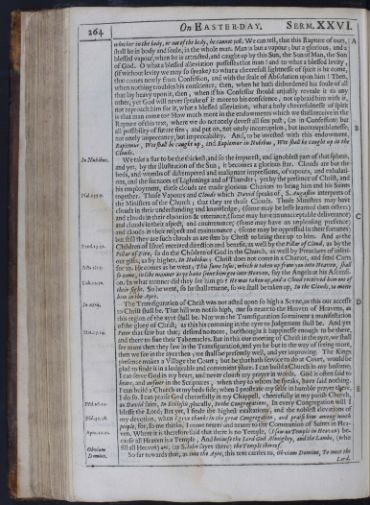 264
On Easter-day.
Serm. XXVI.
whether in the body, or out of the body, he cannot tell. We can tell, that this Rapture of ours,
264
On Easter-day.
Serm. XXVI.
whether in the body, or out of the body, he cannot tell. We can tell, that this Rapture of ours,
shall be in body and soule, in the whole man. Man is but a vapour; but a glorious, and a
blessed vapour, when he is attracted, and caught up by this Sun, the Son of Man, the Son
of God. O what a blessed alleviation possesses that man! and to what a blessed levity,
(if without levity we may so speake) to what a cheerefull lightnesse of spirit is he come,
that comes newly from Confession, and with the seale of Absolution upon him! Then,
when nothing troubles his conscience, then, when he hath disburdened his soule of all
that lay heavy upon it, then, when if his Confessor should unjustly reveale it to any
other, yet God will never speake of it more to his conscience, not upbraid him with it,
not reproach him for it, what a blessed alleviation, what a holy cheerefulnesse of spirit
is that man come to? How much more in the endowments which we shall receive in the
Rapture of this text, where we do not onely devest all sins past, (as in Confession) but
all possibility of future sins; and put on, not onely incorruption, but incorruptiblenesse;
not onely impeccancy, but impeccability. And, to be invested with this endowment,
Rapiemur, Wee shall be caught up, and Rapiemur in Nubibus, Wee shall be caught up in the
Clouds.
We take a Sar to be the thickest, In Nubibus. and so the impurest, and ignoblest part of that sphear;
and yet, by the illustration of the Sun, it becomes a glorious star. Clouds are but the
beds, and wombs of distempered and malignant impressions, of vapours, and exhalati-
ons, and the furnaces of Lightnings and of Thunder; yet by the presence of Christ, and
his employment, these clouds are made glorious Chariots to bring him and his Saints
together.Psal. 135.7. Those Vapours and Clouds which David speaks of, S. Augustin interprets of
the Ministers of the Church; that they are those Clouds. Those Ministers may have
clouds in their understanding and knowledge, (some may be lesse learned then others)
and clouds in their elocution & utterance, (some may have an unacceptable deliverance)
and clouds in their aspect, and countenance, (some may have an unpleasing presence)
and clouds in their respect and maintenance, (some may be oppressed in their fortunes)
but still they are such clouds as are sent by Christ to bring thee up to him. And as the
Children of Israel received direction and benefit, Exod. 13.21. as well by the Pillar of Cloud, as by the
Pillar of Fire, so do the Children of God in the Church, as well by Preachers of inferi-
our gifts, as by higher. In Nubibus; Christ does not come in a Chariot, and send Carts
for us.Acts 1.11. He comes as he went; This same Iesus, which is taken up from you into Heaven, shall
so come, in like manner as ye have seene him goe into Heaven, say the Angels at his Ascensi-
on.Luk. 24.50. In what manner did they see him go? He was taken up, and a Cloud received him out of
their sight. So he went, so he shall returne, so we shall be taken up, In the Clouds, to meete
him in the Ayre.
The Transfiguration of Christ was not acted upon so high a Scene, In aëra. as this our accesse
to Christ shall be. That hill was not so high, nor so neare to the Heaven of Heavens, as
this region of the ayre shall be. Nor was the Transfiguration so eminent a manifestation
of the glory of Christ, as this his comming in the ayre to Judgement shall be. And yet
Peter that saw but that, Mat. 17.14. desired no more, but thought it happinesse enough to be there,
and there to fixe their Tabernacles. But in this our meeting of Christ in the ayre, we shall
see more then they saw in the Transfiguration, and yet be but in the way of seeing more,
then we see in the ayre then; we shall be presently well, and yet improving. The Kings
presence makes a Village the Court; but he that hath service to do at Court, would be
glad to finde it in a lodgeable and convenient place. I can build a Church in my bosome;
I can serve God in my heart, and never cloath my prayer in words. God is often said to
heare, and answer in the Scriptures, when they to whom he speaks, have said nothing.
I can build a Church at my beds side; when I prostrate my selfe in humble prayer there,
I do so. I can praise God cheerefully in my Chappell, cheerefully in my parish Church,
as David saies, Psal. 26.12. In Ecclesiis, plurally, In the Congregations, In every Congregation will I
blesse the Lord; But yet, I finde the highest exaltations, and the noblest elevations of
my devotion, Psal. 35.18. when I give thanks in the great Congregation, and praise him among much
people, for, so me thinks, I come nearer and nearer to the Communion of Saints in Hea-
ven.Apoc. 21.22. Where it is therefore said that there is no Temple, (I saw no Temple in Heaven) be-
cause all Heaven is a Temple, And because the Lord God Almighty, and the Lambe, (who
fill all Heaven) are,Obviam
Domino. (as S. Iohn sayes there) the Temple thereof.
So far towards that, as into the Ayre, this text carries us, Obviam Domino, To meet the Lord.
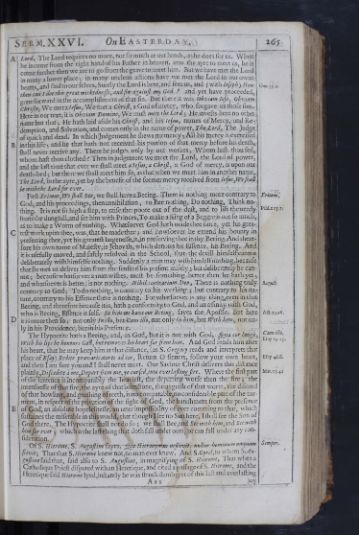 Serm. XXVI.
On Easter-day.
265
Lord. The Lord requires no more, not so much at our hands, as he does for us. When
Serm. XXVI.
On Easter-day.
265
Lord. The Lord requires no more, not so much at our hands, as he does for us. When
he is come from the right hand of his Father in heaven, into the ayre to meet us, he is
come farther then we are to go from the grave to meet him. But we have met the Lord
in many a lower place; in many unclean actions have we met the Lord in our owne
hearts, and said to our selves, Surely the Lord is here, and sees us, Gen. 39.9. and (with Ioseph) How
then can I doe this great wickednesse, and sin against my God? and yet have proceeded,
gone forward in the accomplishment of that sin. But there it was Obviam Iesu, Obviam
Christo, We met a Iesus, We met a Christ, a God of mercy, who forgave us those sins.
Here in our text, it is Obviam Domino, We must meet the Lord; He invests here no other
name but that; He hath laid aside his Christ, and his Iesus, names of Mercy, and Re-
demption, and Salvation, and comes only in the name of power, The Lord, The Judge
of quick and dead. In which Judgement he shews no mercy; All his mercy is exercised
in this life; and he that hath not received his portion of that mercy before his death,
shall never receive any. There he judges only by our workes, Whom hast thou fed,
whom hast thou clothed? Then in judgement we meet the Lord, the Lord of power,
and the last time that ever we shall meet a Iesus, a Christ, a God of mercy, is upon our
death-bed; but there we shall meet him so, as that when we meet him in another name,
The Lord, in the ayre, yet by the benefit of the former mercy received from Iesus, We shall
be with the Lord for ever.
First Erimus, We shall Bee, we shall have a Beeing.Erimus. There is nothing more contrary to
God, and his proceedings, then annihilation, to Bee nothing, Do nothing, Think no-
thing. It is not so high a step, to raise the poore out of the dust, Psal. 113.7. and to lift the needy
from the dunghill, and set him with Princes, To make a King of a Beggar is not so much,
as to make a Worm of nothing. Whatsoever God hath made thee since, yet his grea-
test work upon thee, was, that he made thee; and howsoever he extend his bounty in
preferring thee, yet his greatest largenesse, is, in preserving thee in thy Beeing And there-
fore his own name of Majesty, is Jehovah, which denotes his Essence, his Beeing. And
it is usefully moved, and safely resolved in the School, that the devill himself cannot
deliberately wish himselfe nothing. Suddenly a man may wish himself nothing, because
that seemes to deliver him from the sense of his present misery; but deliberately he can-
not; because whatsoever a man wishes, must be something better then he hath yet;
and whatsoever is better, is not nothing. Nihil contrarium Deo,August. There is nothing truly
contrary to God; To do nothing, is contrary to his working; but contrary to his na-
ture, contrary to his Essence there is nothing. For whatsoever is any thing, even in that
Beeing, and therefore because it is, hath a conformity to God, and an affinity with God,
who is Beeing, Essence it self. In him we have our Beeing, sayes the Apostle.Act. 17.28. But here
it is more then so; not only In illo, but Cum illo, not only In him, but With him, not on-
ly in his Providence, but in his Presence.
The Hypocrite hath a Beeing, and, in God, but it is not with God, Cum illo. Qua cor longe,
With his lips he honours God, but removes his heart far from him. And God sends him after Esay 29.13.
his heart, that he may keep him at that distance, (as S. Gregory reads and interprets that
place of Esay) Redite prævaricatores ad cor, Return O sinners, follow your own heart,
Esay 46.8. and then I am sure you and I shall never meet. Our Saviour Christ delivers this distance
plainly, Discedite à me, Depart from me, ye cursed, into everlasting fire.Mat. 25.42. Where the first part
of the sentence is incomparably the heaviest, the departing worse then the fire; the
intensnesse of that fire, the ayre of that brimstone, the anguish of that worm, the discord
of that howling, and gnashing of teeth, is no comparable, no considerable part of the tor-
ment, in respect of the privation of the sight of God, the banishment from the presence
of God, an absolute hopelesnesse, an utter impossibility of ever comming to that, which
sustaines the miserable in this world, that though I see no Sun here, I shall see the Son of
God there. The Hypocrite shall not do so; we shall Bee, and Bee with him, and Bee with
him for ever; which is the last thing that doth fall under ours, or can fall under any con-
sideration.
Of S. Hierome, S. Augustine sayes, Quæ Hicronymus neseivit,Semper. nullus hominum unquam
seivit; That that S. Hierome knew not, no man ever knew. And S. Cyril, to whom S. Au-
gustine said that, said also to S. Augustine, in magnifying of S. Hierome, That when a
Catholique Priest disputed with an Heretique, and cited a passage of S. Hierome, and the
Heretique said Hierome lyed, instantly he was struck dumb; yet of this last and everlasting Aa2 joy
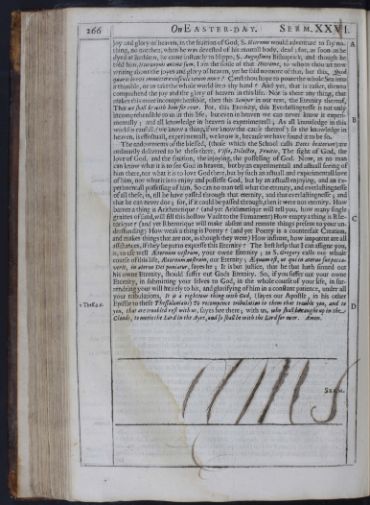 266
On Easter-day.
Serm. XXVI.
joy and glory of heaven, in the fruition of God, S. Hierome would adventure to say no-
266
On Easter-day.
Serm. XXVI.
joy and glory of heaven, in the fruition of God, S. Hierome would adventure to say no-thing, no not then, when he was devested of his mortall body, dead; for, as soon as he
dyed at Bethlem, he came instantly to Hippo, S. Augustines Bishoprick, and though he
told him, Hieronymi anima sum, I am the soule of that Hierome, to whom thou art now
writing about the joyes and glory of heaven, yet he said no more of that, but this, Quid
quæris brevi immittere vasculo totum mare? Canst thou hope to poure the whole Sea into
a thimble, or to take the whole world into thy hand? And yet, that is easier, then to
comprehend the joy and the glory of heaven in this life. Nor is there any thing, that
makes this more incomprehensible, then this Semper in our text, the Eternity thereof,
That we shall be with him for ever. For, this Eternity, this Everlastingnesse is not only
incomprehensible to us in this life, but even in heaven we can never know it experi-
mentally; and all knowledge in heaven is experimentall; As all knowledge in this
world is causall, (we know a thing, if we know the cause thereof) so the knowledge in
heaven, is effectuall, experimentall, we know it, because we have found it to be so.
The endowments of the blessed, (those which the School calls Dotes beatorum) are
ordinarily delivered to be these three, Visio, Dilectio, Fruitio, The sight of God, the
love of God, and the fruition, the injoying, the possessing of God. Now, as no man
can know what it is to see God in heaven, but by an experimentall and actuall seeing of
him there, nor what it is to love God there, but by such an actuall and experimentall love
of him, nor what it is to enjoy and possesse God, but by an actuall enjoying, and an ex-
perimentall possessing of him, So can no man tell what the eternity, and everlastingnesse
of all these, is, till he have passed through that eternity, and that everlastingnesse; and
that he can never doe; for, if it could be passed through, then it were not eternity. How
barren a thing is Arithmetique? (and yet Arithmetique will tell you, how many single
graines of sand, will fill this hollow Vault to the Firmament) How empty a thing is Rhe-
torique? (and yet Rherorique will make absent and remote things present to your un-
derstanding) How weak a thing is Poetry? (and yet Poetry is a counterfait Creation,
and makes things that are not, as though they were) How infirme, how impotent are all
assistances, if they be put to expresse this Eternity? The best help that I can assigne you,
is, to use well Æternum vestrum, your owne Eternity; as S. Gregory calls our whole
course of this life, Æternum nostrum, our Eternity; Æquum est, ut qui in æterno suo pecca-
verit, in æterno Dei puniatur, sayes he; It is but justice, that he that hath sinned out
his owne Eternity, should suffer out Gods Eternity. So, if you suffer out your owne
Eternity, in submitting your selves to God, in the whole course of your life, in sur-
rendring your will intirely to his, and glorifying of him in a constant patience, under all
your tribulations, It is a righteous thing with God, (sayes our Apostle, in his other
Epistle to these Thessalonians) To recompence tribulation to them that trouble you,2 Thess. 1.6. and to
you, that are troubled rest with us, sayes hee there; with us, who shall be caught up in the
Clouds, to meete the Lord in the Ayre, and so shall be with the Lord for ever. Amen. Serm.
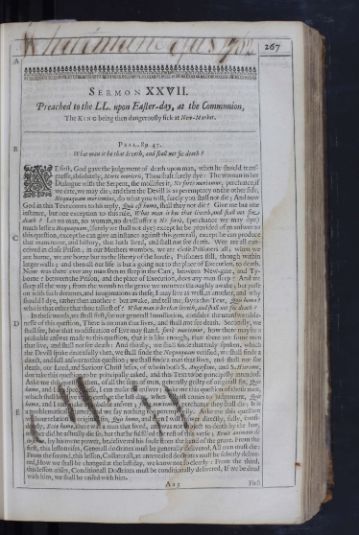 267
267
Sermon XXVII.
Preached to the LL. upon Easter-day, at the Communion,
The King being then dangerously sick at New-Market.
Psal. 89.47.
What man is he that liveth, and shall not see death?
ATAt first, God gave the judgement of death upon man, when he should trans-
gresse, absolutely, Morte morieris, Thou shalt surely dye: The woman in her
Dialogue with the Serpent, she mollifies it, Ne fortè moriamur, perchance, if
we eate, we may die; and then the Devill is as peremptory on the other side,
Nequaquam moriemini, do what you will, surely you shall not die; And now
God in this Text comes to his reply, Quis est homo, shall they not die? Give me but one
instance, but one exception to this rule, What man is hee that liveth, and shall not see
death? Let no man, no woman, no devill offer a Ne fortè, (perchance we may dye)
much lesse a Nequaquam, (surely we shall not dye) except he be provided of an answer to
this question, except he can give an instance against this generall, except he can produce
that mans name, and history, that hath lived, and shall not see death. Wee are all con-
ceived in close Prison; in our Mothers wombes, we are close Prisoners all; when we
are borne, we are borne but to the liberty of the house; Prisoners still, though within
larger walls; and then all our life is but a going out to the place of Execution, to death.
Now was there ever any man seen to sleep in the Cart, between New-gate, and Ty-
borne? between the Prison, and the place of Execution, does any man sleep? And we
sleep all the way; from the womb to the grave we are never throughly awake; but passe
on with such dreames, and imaginations as these, I may live as well, as another, and why
should I dye, rather then another? but awake, and tell me, sayes this Text, Quis homo?
who is that other that thou talkest of? What man is he that liveth, and shall not see death?
In these words, we shall first, for our generall humiliation, consider the unanswerable-
nesse of this question, There is no man that lives, and shall not see death. Secondly, we
shall see, how that modification of Eve may stand, fortè moriemur, how there may be a
probable answer made to this question, that it is like enough, that there are some men
that live, and shall not see death: And thirdly, we shall finde that truly spoken, which
the Devill spake deceitfully then, we shall finde the Nequaquam verified, we shall finde a
direct, and full answer to this question; we shall finde a man that lives, and shall not see
death, our Lord, and Saviour Christ Jesus, of whom both S. Augustine, and S. Hierome,
doe take this question to be principally asked, and this Text to be principally intended.
Aske me this question then, of all the sons of men, generally guilty of originall sin, Quis
homo, and I am speechlesse, I can make no answer; Aske me this question of those men,
which shall be alive upon earth at the last day, when Christ comes to judgement, Quis
homo, and I can make a probable answer; forte moriemur, perchance they shall die; It is
a problematicall matter, and we say nothing too peremptorily. Aske me this question
without relation to originall sin, Quis homo, and then I will answer directly, fully, confi-
dently, Ecce homo, there was a man that lived, and was not subject to death by the law,
neither did he actually die so, but that he fulfilled the rest of this verse; Eruit animam de
inferno, by his owne power, he delivered his soule from the hand of the grave. From the
first, this lesson rises, Generall doctrines must be generally delivered, All men must die:
From the second, this lesson, Collaterall, an unrevealed doctrines must be soberly delive-
red, How we shall be changed at the last day, we know not so clearly: From the third,
this lesson arises, Conditionall Doctrines must be conditionally delivered, If we be dead
with him, we shall be raised with him. Aa3 First
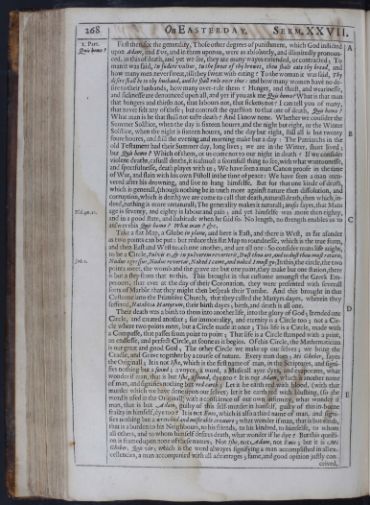 268
On Easter-day.
Serm. XXVII.
268
On Easter-day.
Serm. XXVII.
First then, 1. Part. for the generality, Those other degrees of punishment, which God inflicted
upon Adam, and Eve, and in them upon us, were as absolutely, Quis homo? and illimitedly pronoun-
ced, as this of death, and yet we see, they are many wayes extended, or contracted; To
man it was said, In sudore vultus, In the sweat of thy browes, thou shalt eate thy bread, and
how many men never sweat, till they sweat with eating? To the woman it was said, Thy
desire shall be to thy husband, and he shall rule over thee: and how many women have no de-
sire to their husbands, how many over-rule them? Hunger, and thirst, and wearinesse,
and sicknesse are denounced upon all, and yet if you ask me Quis homo? What is that man
that hungers and thirsts not, that labours not, that sickens not? I can tell you of many,
that never felt any of these; but contract the question to that one of death, Quis homo?
What man is he that shall not taste death? And I know none. Whether we consider the
Summer Solstice, when the day is sixteen houres, and the night but eight, or the Winter
Solstice, when the night is sixteen houres, and the day but eight, still all is but twenty
foure houres, and still the evening and morning make but a day: The Patriarchs in the
old Testament had their Summer day, long lives; we are in the Winter, short lived;
but Quis homo? Which of them, or us come not to our night in death? If we consider
violent deaths, casuall deaths, it is almost a scornfull thing to see, with what wantonnesse,
and sportfulnesse, death playes with us; We have seen a man Canon proofe in the time
of War, and slain with his own Pistoll in the time of peace: We have seen a man reco-
vered after his drowning, and live to hang himselfe. But for that one kinde of death,
which is generall, (though nothing be in truth more against nature then dissolution, and
corruption, which is death) we are come to call that death, naturall death, then which, in-
deed, nothing is more unnaturall; The generality makes it naturall; Moses sayes, that Mans
age is seventy, Psal. 90.10. and eighty is labour and pain; and yet himselfe was more then eighty,
and in a good state, and habitude when he said so. No length, no strength enables us to
answer this Quis homo? What man? &c.
Take a flat Map, a Globe in plano, and here is East, and there is West, as far asunder
as two points can be put: but reduce this flat Map to roundnesse, which is the true form,
and then East and West touch one another, and are all one: So consider mans life aright,
to be a Circle, Pulvis es, & in pulverem reverteris, Dust thou art, and to dust thou must return;
Nudus egressus,Job 1. Nudus revertar, Naked I came, and naked I must go; In this, the circle, the two
points meet, the womb and the grave are but one point, they make but one station, there
is but a step from that to this. This brought in that custome amongst the Greek Em-
perours, that ever at the day of their Coronation, they were presented with severall
sorts of Marble, that they might then bespeak their Tombe. And this brought in that
Custome into the Primitive Church, that they called the Martyrs dayes, wherein they
suffered, Natalitia Martyrum, their birth dayes; birth, and death is all one.
Their death was a birth to them into another life, into the glory of God; It ended one
Circle, and created another; for immortality, and eternity is a Circle too; not a Cir-
cle where two points meet, but a Circle made at once; This life is a Circle, made with
a Compasse, that passes from point to point; That life is a Circle stamped with a print,
an endlesse, and perfect Circle, as soone as it begins. Of this Circle, the Mathematician
is our great and good God; The other Circle we make up our selves; we bring the
Cradle, and Grave together by a course of nature. Every man does; Mi Gheber, sayes
the Originall; It is not Ishe, which is the first name of man, in the Scriptures, and signi-
fies nothing but a sound; a voyce, a word, a Musicall ayre dyes, and evaporates, what
wonder if man, that is but Ishe, a sound, dye too? It is not Adam, which is another name
of man, and signifies nothing but red earth; Let it be earth red with blood, (with that
murder which we have done upon our selves) let it be earth red with blushing, (so the
word is used in the Originall) with a conscience of our own infirmity, what wonder if
man, that is but Adam, guilty of this self-murder in himself, guilty of this in-borne
frailty in himself, dye too? It is not Enos, which is also a third name of man, and signi-
fies nothing but a wretched and miserable creature; what wonder if man, that is but earth,
that is a burden to his Neighbours, to his friends, to his kindred, to himselfe, to whom
all others, and to whom himself desires death, what wonder if he dye? But this questi-
on is framed upon none of these names; Not Ishe, not Adam, not Enos; but it is Mi
Gheber, Quis vir; which is the word alwayes signifying a man accomplished in all ex-
cellencies, a man accompanied with all advantages; fame, and good opinion justly con-
ceived,
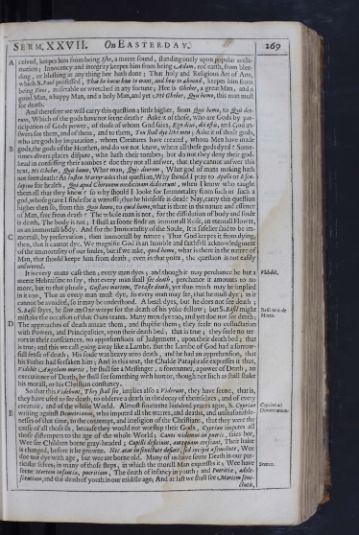 Serm. XXVII.
On Easter-day.
269
ceived, keepes him from being Ishe, a meere sound, standing onely upon popular accla-
Serm. XXVII.
On Easter-day.
269
ceived, keepes him from being Ishe, a meere sound, standing onely upon popular accla-mation; Innocency and integrity keepes him from being Adam, red earth, from blee-
ding, or blushing at any thing hee hath done; That holy and Religious Art of Arts,
which S. Paul professed, That he knew how to want, and how to abound, keepes him from
being Enos, miserable or wretched in any fortune; Hee is Gheber, a great Man, and a
good Man, a happy Man, and a holy Man, and yet Mi Gheber, Quis homo, this man must
see death.
And therefore we will carry this question a little higher, from Quis homo, to Quis deo-
rum, Which of the gods have not seene death? Aske it of those, who are Gods by par-
ticipation of Gods power, of those of whom God saies, Ego dixi, dii est is, and God an-
swers for them, and of them, and to them, You shall dye like men; Aske it of those gods,
who are gods by imputation, whom Creatures have created, whom Men have made
gods, the gods of the Heathen, and do we not know, where all these gods dyed? Some-
times divers places dispute, who hath their tombes; but do not they deny their god-
head in confessing their tombes? doe they not all answer, that they cannot answer this
text, Mi Gheber, Quis homo, What man, Quis deorum, What god of mans making hath
not seen death? As Iustin martyr asks that question, Why should I pray to Apollo or Escu-
lapius for health, Qui apud Chironem medicinam didicerunt, when I know who taught
them all that they knew? so why should I looke for Immortality from such or such a
god, whose grave I finde for a witnesse, that he himselfe is dead? Nay, carry this question
higher then so, from this Quis homo, to quid homo, what is there in the nature and essence
of Man, free from death? The whole man is not, for the dissolution of body and soule
is death. The body is not; I shall as soone finde an immortall Rose, an eternall Flower,
as an immortall body. And for the Immortality of the Soule, It is safelier said to be im-
mortall, by preservation, then immortall by nature; That God keepes it from dying,
then, that it cannot dye. We magnifie God in an humble and faithfull acknowledgment
of the immortality of our soules, but if we aske, quid homo, what is there in the nature of
Man, that should keepe him from death, even in that point, the question is not easily
answered.
It is every mans case then; every man dyes;Videbit. and though it may perchance be but a
meere Hebraisme to say, that every man shall see death, perchance it amounts to no
more, but to that phrase, Gustare mortem, To taste death, yet thus much may be implied
in it too, That as every man must dye, so every man may see, that he must dye; as it
cannot be avoided, so it may be understood. A beast dyes, but he does not see death;
S. Basil sayes, he saw an Oxe weepe for the death of his yoke-fellow;Basil orat. de
Morte. but S. Basil might
mistake the occasion of that Oxes teares. Many men dye too, and yet doe not see death;
The approaches of death amaze them, and stupifie them; they feele no colluctation
with Powers, and Principalities, upon their death bed; that is true; they feele no ter-
rors in their consciences, no apprehensions of Judgement, upon their death bed; that
is true; and this we call going away like a Lambe. But the Lambe of God had a sorrow-
full sense of death; His soule was heavy unto death, and he had an apprehension, that
his Father had forsaken him; And in this text, the Chalde Paraphrase expresses it thus,
Videbit Angelum mortis, he shall see a Messenger, a forerunner, a power of Death, an
executioner of Death, he shall see something with horror, though not such as shall shake
his morall, or his Christian constancy.
So that this Videbunt, They shall see, implies also a Viderunt, they have seene, that is,
they have used to see death, to observe a death in the decay of themselves, and of every
creature, and of the whole World. Almost fourteene hundred yeares agoe, Cyprian ad
Demetrianum. S. Cyprian
writing against Demetrianus, who imputed all the warres, and deaths, and unseasonable-
nesses of that time, to the contempt, and irreligion of the Christians, that they were the
cause of all those ils, because they would not worship their Gods, Cyprian imputes all
those distempers to the age of the whole World; Canos videmus in pueris, saies hee,
Wee see Children borne gray-headed; Capilli deficiunt, antequam crescant, Their haire
is changed, before it be growne. Nec ætas in senectute desinit, sed incipit asenectute, Wee
doe not dye with age, but wee are borne old. Many of us have seene Death in our par-
ticular selves; in many of those steps, in which the morall Man expresses it;Seneca. Wee have
seene Mortem infantiæ, pueritiam, The death of infancy in youth; and Pueritiæ, adole-
scentiam, and the death of youth in our middle age; And at last we shall see Mortem sene-
ctutis,
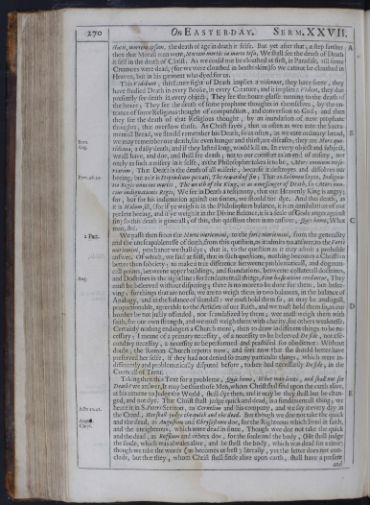 270
On Easter-day.
Serm. XXVII.
ctutis, mortem ipsam, the death of age in death it selfe. But yet after that, a step farther
270
On Easter-day.
Serm. XXVII.
ctutis, mortem ipsam, the death of age in death it selfe. But yet after that, a step farther
then that Morall man went, Mortem mortis in morte Iesu, We shall see the death of Death
it self in the death of Christ. As we could not be cloathed at first, in Paradise, till some
Creatures were dead, (for we were cloathed in beasts skins) so we cannot be cloathed in
Heaven, but in his garment who dyed for us.
This Videbunt, this future sight of Death implies a viderunt, they have seene, they
have studied Death in every Booke, in every Creature; and it implies a Vident, they doe
presently see death in every object, They see the houre-glasse running to the death of
the houre; They see the death of some prophane thoughts in themselves, by the en-
trance of some Religious thought of compunction, and conversion to God; and then
they see the death of that Religious thought, by an inundation of new prophane
thoughts, that overflow those. As Christ sayes, that as often as wee eate the Sacra-
mentall Bread, we should remember his Death, so as often, as we eate ordinary bread,
we may remember our death;Bern. for even hunger and thirst, are diseases; they are Mors quo-
tidiana, a daily death, and if they lasted long, would kill us. In every object and subject, Aug.
we all have, and doe, and shall see death; not to our comfort as an end of misery, not
onely as such a misery in it selfe, as the Philosopher takes it to be, Mors omnium mise-
riarum, That Death is the death of all miserie, because it destroyes and dissolves our
beeing;Prov. 16.14. but as it is Stipendium peccati, The reward of sin; That as Solomon sayes, Indigna-
tio Regis nuncius mortis, The wrath of the King, is as a messenger of Death, so Mors nun-
cius indignationis Regis, We see in Death a testimony, that our Heavenly King is angry;
for, but for his indignation against our sinnes, we should not dye. And this death, as
it is Malum, ill, (for if ye weigh it in the Philosophers balance; it is an annihilation of our
present beeing, and if ye weigh it in the Divine Balance, it is a seale of Gods anger against
sin) so this death is generall; of this, this question there is no answer, Quis homo, What
man, &c.
We passe then from the Morte moriemini,2 Part. to the fortè moriemini, from the generality
and the unescapablenesse of death, from this question, as it admits no answer, to the Fortè
moriemini, perchance we shall dye; that is, to the question as it may admit a probable
answer. Of which, we said at first, that in such questions, nothing becomes a Christian
better then sobriety; to make a true difference betweene problematicall, and dogmati-
call points, betweene upper buildings, and foundations, betweene collaterall doctrines,
and Doctrines in the right line:Aug. for fundamentall things, Sine hæsitatione credantur, They
must be beleeved without disputing; there is no more to be done for them, but belee-
ving; for things that are not so, we are to weigh them in two balances, in the balance of
Analogy, and in the balance of scandall: we must hold them so, as may be analogall,
proportionable, agreeable to the Articles of our Faith, and we must hold them so, as our
brother be not justly offended, nor scandalized by them; wee must weigh them with
faith, for our own strength, and we must weigh them with charity, for others weaknesse.
Certainly nothing endangers a Church more, then to draw indifferent things to be ne-
cessary; I meane of a primary necessity, of a necessity to be beleeved De fide, not a se-
condary necessity, a necessity to be performed and practised for obedience: Without
doubt, the Roman Church repents now, and sees now that she should better have
preserved her selfe, if they had not denied so many particular things, which were in-
differently and problematically disputed before, to bee had necessarily De fide, in the
Councell of Trent.
Taking then this Text for a probleme, Quis homo, What man lives, and shall not see
Death? we answer, It may be that those Men, whom Christ shal find upon the earth alive,
at his returne to Judge the World, shall dye then, and it may be they shall but be chan-
ged, and not dye. That Christ shall judge quick and dead, is a fundamentall thing; we
heare it in S. Peters Sermon, Acts 10.42. to Cornelius and his company, and we say it every day in
the Creed, Hee shall judge the quick and the dead. But though we doe not take the quick
and the dead, August. as Augustine and Chrysostome doe, for the Righteous which lived in faith,
and the unrighteous, which were dead in sinne, Though wee doe not take the quick Chrys.
and the dead, as Ruffinus and others doe, for the soule and the body, (He shall judge
the soule, which was alwaies alive, and he shall the body, which was dead for a time)
though we take the words (as becomes us best) literally, yet the letter does not con-
clude, but that they, whom Christ shall finde alive upon earth, shall have a present and
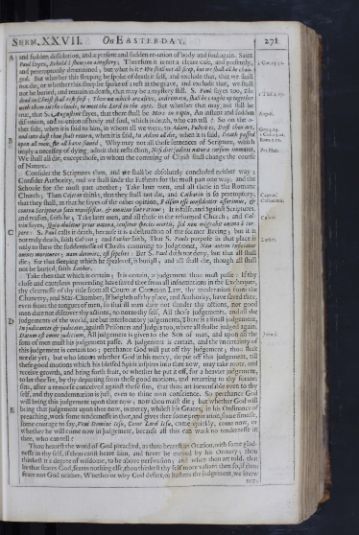 Serm. XXVII.
On Easter-day.
271
and sudden dissolution, and a present and sudden re-union of body and soul again. Saint
Serm. XXVII.
On Easter-day.
271
and sudden dissolution, and a present and sudden re-union of body and soul again. Saint
Paul sayes, Behold I shew you a mystery; Therefore it is not a cleare case, and presently,
1 Cor. 15.51. and peremptorily determined; but what is it? We shall not all sleep, but we shall all be chan-
ged. But whether this sleeping be spoke of death it self, and exclude that, that we shall
not die, or whether this sleep be spoke of a rest in the grave, and exclude that, we shall
not be buried, and remain in death, that may be a mystery still. S. Paul sayes too, 1 Thes. 4.17. The
dead in Christ shall rise first; Then we which are alive, and remain, shall be caught up together
with them in the clouds, to meet the Lord in the ayre. But whether that may not still be
true, that S. Augustine sayes, that there shall be Mors in raptu,August. An instant and sudden
dis-union, and re-union of body and soul, which is death, who can tell? So on the o-
ther side, when it is said to him, in whom all we were, to Adam, Pulvis es, Dust thou art, Gen. 3.19.
and into dust thou shalt return, when it is said, In Adam all die, when it is said, 1 Cor. 15.22. Death passed
upon all men, for all have sinned, Why may not all those sentences of Scripture, which Rom. 5.12.
imply a necessity of dying, admit that restriction, Nisi dies judicii naturæ cursum immutet,
Pet. Mar. We shall all die, except those, in whom the comming of Christ shall change the course
of Nature.
Consider the Scriptures then, and we shall be absolutely concluded neither way;
Consider Authority, and we shall finde the Fatherrs for the most part one way, and the
Schoole for the most part another; Take later men, and all those in the Romane
Church; Then Cajetan thinks, that they shall not die, and Catharin is so peremptory, Cajetan.
that they shall, as that he sayes of the other opinion, Catharinus. Falsam esse confidenter asserimus, &
contra Scripturas satis manifestas, & omnino sine ratione; It is false, and against Scriptures,
and reason, saith he; Take later men, and all those in the reformed Church;Calvin. and Cal-
vin sayes, Quia aboletur prior natura, censetur species mortis, sed non migrabit anima à cor-
pore: S. Paul calls it death, because it is a destruction of the former Beeing; but it is
not truly death, saith Calvin; and Luther saith, Luther. That S. Pauls purpose in that place is
only to shew the suddennesse of Christs comming to Judgement, Non autem inficiatur
omnes morituros; nam dormire, est sepeliri: But S. Paul doth not deny, but that all shall
die; for that sleeping which he speaks of, is buriall; and all shall die, though all shall
not be buried, saith Luther.
Take then that which is certain; It is certain, a judgement thou must passe: If thy
close and cautelous proceeding have saved thee from all informations in the Exchequer,
thy clearnesse of thy title from all Courts at Common Law, thy moderation from the
Chancery, and Star-Chamber, If heighth of thy place, and Authority, have saved thee,
even from the tongues of men, so that ill men dare not slander thy actions, nor good
men dare not discover thy actions, no not to thy self, All those judgements, and all the
judgements of the world, are but interlocutory judgements; There is a finall judgement,
In judicantes & judicatos, against Prisoners and Judges too, where all shalbe judged again;
Datum est omne judicium, All judgement is given to the Son of man, John 5. and upon all the
sons of men must his judgement passe. A judgement is certain, and the uncertainty of
this judgement is certain too; perchance God will put off thy judgement; thou shalt
not die yet; but who knows whether God in his mercy, do put off this judgement, till
these good motions which his blessed Spirit inspires into thee now, may take roote, and
receive growth, and bring forth fruit, or whether he put it off, for a heavier judgement,
to let thee see, by thy departing from these good motions, and returning to thy former
sins, after a remorse conceived against those sins, that thou art inexcusable even to thy
self, and thy condemnation is just, even to thine own conscience. So perchance God
will bring this judgement upon thee now; now thou maist die; but whether God will
bring that judgement upon thee now, in mercy, whilest his Graces, in his Ordinance of
preaching, work some tendernesse in thee, and gives thee some preparation, some fitnesse,
some courage to say, Veni Domine Iesu, Come Lord Iesu, come quickly, come now, or
whether he will come now in judgement, because all this can work no tendernesse in
thee, who can tell?
Thou hearest the word of God preached, as thou hearest an Oration, with some glad-
nesse in thy self, if thou canst heare him, and never be moved by his Oratory; thou
thinkest it a degree of wisdome, to be above perswasion; and when thou art told, that
he that feares God, feares nothing else, thou thinkest thy self more valiant then so, if thou
feare not God neither; Whether or why God defers, or hastens the judgement, we know
not;
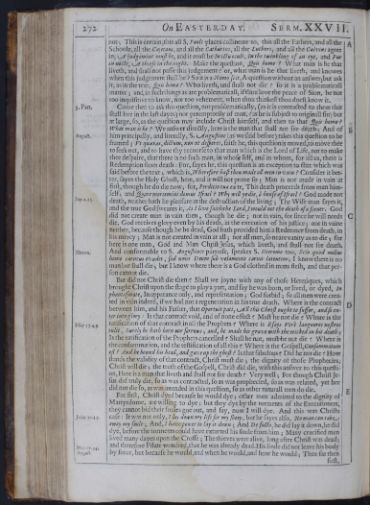 272
On Easter-day.
Serm. XXVII.
not; This is certain, this all S. Pauls places collineate to, this all the Fathers, and all the
272
On Easter-day.
Serm. XXVII.
not; This is certain, this all S. Pauls places collineate to, this all the Fathers, and all the
Schoole, all the Cajetans, and all the Catharins, all the Luthers, and all the Calvins agree
in, A judgement must be, and it must be In ictu oculi, In the twinkling of an eye, and Fur
in nocte, A thiefe in the night. Make the question, Quis homo? What man is he that
liveth, and shall not passe this judgement? or, what man is he that liveth, and knowes
when this judgement shall be? So it is a Nemo scit, A question without an answer; but ask
it, as in the text, Quis homo? Who liveth, and shall not die? so it is a problematicall
matter; and in such things as are problematicall, if thou love the peace of Sion, be not
too inquisitive to know, nor too vehement, when thou thinkest thou doest know it.
Come then to ask this question, 3. Part. not problematically, (as it is contracted to them that
shall live in the last dayes) nor peremptorily of man, (as he is subject to originall sin) but
at large, so, as the question may include Christ himself, and then to that Quis homo?
What man is he? We answer directly, here is the man that shall not see death; And of
him principally, August. and literally, S. Augustine (as we said before) takes this question to be
framed; Vt quæras, dictum, non ut desperes, saith he, this question is moved, to move thee
to seek out, and to have thy recourse to that man which is the Lord of Life, not to make
thee despaire, that there is no such man, in whose self, and in whom, for all us, there is
Redemption from death: For, sayes he, this question is an exception to that which was
said before the text; which is, Wherefore hast thou made all men in vain? Consider it bet-
ter, sayes the Holy Ghost, here, and it will not prove so; Man is not made in vain at
first, though he do die now; for, Perditio tua ex te, This death proceeds from man him-
self; and Quare moriemini domus Israel? Why will ye die, ô house of Israel? God made not
death, Sap. 1.13. neither hath he pleasure in the destruction of the living; The Wise man sayes it,
and the true God sweares it, As I live saith the Lord, I would not the death of a sinner. God
did not create man in vain then, though he die; not in vain, for since he will needs
die, God receives glory even by his death, in the execution of his justice; not in vaine
neither, because though he be dead, God hath provided him a Redeemer from death, in
his mercy; Man is not created in vain at all; nor all men, so neare vanity as to die; for
here is one man, God and Man Christ Jesus, which liveth, and shall not see death.
And conformable to S. Augustines purpose, Hieron. speakes S. Hierome too, Scio quòd nullus
homo carneus evadet, sed novi Deum sub velamento carnis latentem; I know there is no
man but shall die; but I know where there is a God clothed in mans flesh, and that per-
son cannot die.
But did not Christ die then? Shall we joyne with any of those Heretiques, which
brought Christ upon the stage to play a part, and say he was born, or lived, or dyed, In
phantasmate, In apparance only, and representation; God forbid; so all men were crea-
ted in vain indeed, if we had not a regeneration in his true death. Where is the contract
between him, and his Father, that Oportuit pati, All this Christ ought to suffer, and so en-
ter into glory: Is that contract void, and of none effect? Must he not die? Where is the
ratification of that contract in all the Prophets?Esay 53.4,9. Where is Esays Verè languores nostros
tulit, Surely he hath born our sorrows; and, he made his grave with the wicked in his death;
Is the ratification of the Prophets cancelled? Shall he not, must he not die? Where is
the consummation, and the testification of all this? Where is the Gospell, Consummatum
est? And he bowed his head, and gave up the ghost? Is that fabulous? Did he not die? How
stands the validity of that contract, Christ must die; the dignity of those Prophecies,
Christ will die; the truth of the Gospell, Christ did die, with this answer to this questi-
on, Here is a man that liveth and shall not see death? Very well; For though Christ Je-
sus did truly die, so as was contracted, so as was prophecied, so as was related, yet hee
did not die so, as was intended in this question, so as other naturall men do die.
For first, Christ dyed because he would dye; other men admitted to the dignity of
Martyrdome, are willing to dye; but they dye by the torments of the Executioners,
they cannot bid their soules goe out, and say, now I will dye. And this was Christs
case:John 10.15. It was not only, I lay down my life for my sheep, but he sayes also, No man can take
away my soule; And, I have power to lay it down; And De facto, he did lay it down, he did
dye, before the torments could have extorted his soule from him; Many crucified men
lived many dayes upon the Crosse; The thieves were alive, long after Christ was dead;
and therefore Pilate wondred, that he was already dead. His soule did not leave his body Mar. 15.44.
by force, August. but because he would, and when he would, and how he would; Thus far then first,
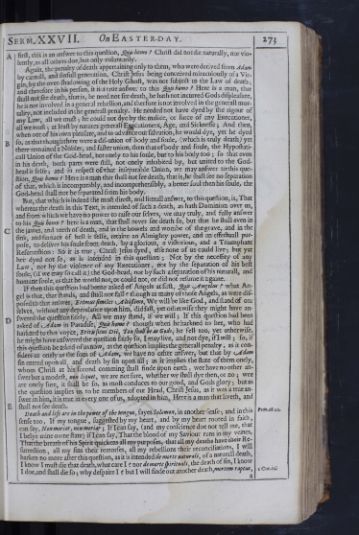 Serm. XXVII.
On Easter-day.
273
first, this is an answer to this question, Quis homo? Christ did not die naturally, nor vio-
Serm. XXVII.
On Easter-day.
273
first, this is an answer to this question, Quis homo? Christ did not die naturally, nor vio-lently, as all others doe, but only voluntarily.
Again, the penalty of death appertaining only to them, who were derived from Adam
by carnall, and sinfull generation, Christ Jesus being conceived miraculously of a Vir-
gin, by the over-shadowing of the Holy Ghost, was not subject to the Law of death;
and therefore in his person, it is a true answer to this Quis homo? Here is a man, that
shall not see death, that is, he need not see death, he hath not incurred Gods displeasure,
he is not involved in a general rebellion, and therfore is not involved in the generall mor-
tality, not included in the generall penalty. He needed not have dyed by the rigour of
any Law, all we must; he could not dye by the malice, or force of any Executioner,
all we must; at least by natures generall Executioners, Age, and Sicknesse; And then,
when out of his own pleasure, and to advance our salvation, he would dye, yet he dyed
so, as that though there were a dis-union of body and soule, (which is truly death) yet
there remained a Nobler, and faster union, then that of body and soule, the Hypostati-
call Union of the God-head, not onely to his soule, but to his body too; so that even
in his death, both parts were still, not onely inhabited by, but united to the God-
head it selfe; and in respect of that inseparable Union, we may answer to this que-
stion, Quis homo? Here is a man that shall not see death, that is, he shall see no separation
of that, which is incomparably, and incomprehensibly, a better soul then his soule, the
God-head shall not be separated from his body.
But, that which is indeed the most direct, and literall answer, to this question, is, That
whereas the death in this Text, is intended of such a death, as hath Dominion over us,
and from which we have no power to raise our selves, we may truly, and fully answer
to his Quis homo? here is a man, that shall never see death so, but that he shall even in
the jawes, and teeth of death, and in the bowels and wombe of the grave, and in the
sink, and furnace of hell it selfe, retaine an Almighty power, and an effectuall pur-
pose, to deliver his soule from death, by a glorious, a victorious, and a Triumphant
Resurrection: So it is true, Christ Jesus dyed, else none of us could live; but yet
hee dyed not so, as is intended in this question; Not by the necessity of any
Law, not by the violence of any Executioner, not by the separation of his best
soule, (if we may so call it) the God-head, nor by such a separation of his naturall, and
humane soule, as that he would not, or could not, or did not resume it againe.
If then this question had beene asked of Angels at first, Quis Angelus? what An-
gel is that, that stands, and shall not fall? though as many of those Angels, as were dis-
posed to that answer, Erimus similes Altissimo, We will be like God, and stand of our
selves, without any dependance upon him, did fall, yet otherwise they might have an-
swered the question fairly, All we may stand, if we will; If this question had been
asked of Adam in Paradise, Quis homo? though when he harkned to her, who had
harkned to that voyce, Erit is sicut Dii, You shall be as Gods, he fell too, yet otherwise,
he might have answered the question fairly so, I may live, and not dye, if I will; so, if
this question be asked of us now, as the question implies the generall penalty, as it con-
siders us onely as the sons of Adam, we have no other answer, but that by Adam
sin entred upon all, and death by sin upon all; as it implies the state of them onely,
whom Christ at his second comming shall finde upon earth, wee have no other an-
swer but a modest, non liquet, we are not sure, whether we shall dye then, or no; wee
are onely sure, it shall be so, as most conduces to our good, and Gods glory; but as
the question implies us to be members of our Head, Christ Jesus, as it was a true an-
swer in him, it is true in every one of us, adopted in him, Here is a man that liveth, and
shall not see death.
Death and life are in the power of the tongue, sayes Solomon, in another sense;Prov. 18.21. and in this
sense too, If my tongue, suggested by my heart, and by my heart rooted in faith,
can say, Non moriar, non moriar; If I can say, (and my conscience doe not tell me, that
I belye mine owne state) if I can say, That the blood of my Saviour runs in my veines,
That the breath of his Spirit quickens all my purposes, that all my deaths have their Re-
surrection, all my sins their remorses, all my rebellions their reconciliations, I will
harken no more after this question, as it is intended de morte naturali, of a naturall death,
I know I must die that death, what care I? nor de morte spirituali, the death of sin, I know
I doe, and shall die so; why despaire I? but I will finde out another death, mortem raptus,2 Cor. 12. a
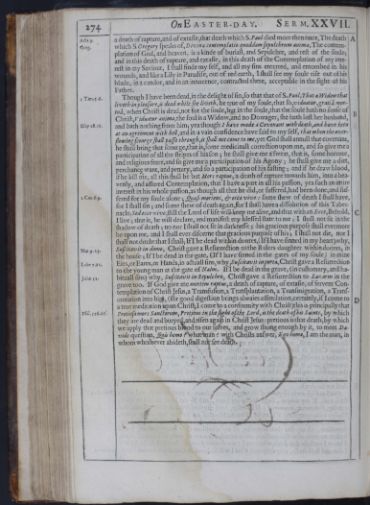 274
On Easter-day.
Serm. XXVII.
a death of rapture, Acts 9. and of extasie, that death which S. Paul died more then once, The death
274
On Easter-day.
Serm. XXVII.
a death of rapture, Acts 9. and of extasie, that death which S. Paul died more then once, The death
which S. Gregory speaks of, Divina contemplatio quoddam sepulchrum animæ, Greg. The contem-
plation of God, and heaven, is a kinde of buriall, and Sepulchre, and rest of the soule;
and in this death of rapture, and extasie, in this death of the Contemplation of my inte-
rest in my Saviour, I shall finde my self, and all my sins enterred, and entombed in his
wounds, and like a Lily in Paradise, out of red earth, I shall see my soule rise out of his
blade, in a candor, and in an innocence, contracted there, acceptable in the sight of his
Father.
Though I have been dead, 1 Tim. 5.6. in the delight of sin, so that that of S. Paul, That a Widow that
liveth in pleasure, is dead while she liveth, be true of my soule, that so, viduatur, gratiâ mor-
tuâ, when Christ is dead, not for the soule, but in the soule, that the soule hath no sense of
Christ, Viduatur anima, the soul is a Widow, and no Dowager, she hath lost her husband,
and hath nothing from him;Esay 28.15. yea though I have made a Covenant with death, and have been
at an agreement with hell, and in a vain confidence have said to my self, that when the over-
flowing scourge shall passe through, it shall not come to me, yet God shall annull that covenant,
he shall bring that scourge, that is, some medicinall correction upon me, and so give me a
participation of all the stripes of his son; he shall give me a sweat, that is, some horrour,
and religious feare, and so give me a participation of his Agony; he shall give me a diet,
perchance want, and penury, and so a participation of his fasting; and if he draw blood,
if he kill me, all this shall be but Mors raptus, a death of rapture towards him, into a hea-
venly, and assured Contemplation, that I have a part in all his passion, yea such an intire
interest in his whole passion, as though all that he did, or suffered, had been done, and suf-
fered for my soul alone;2 Cor. 6.9. Quasi moriens, & ecce vivo: some shew of death I shall have,
for I shall sin; and some shew of death again, for I shall have a dissolution of this Taber-
nacle; Sed ecce vivo, still the Lord of life will keep me alive, and that with an Ecce, Behold,
I live; that is, he will declare, and manifest my blessed state to me; I shall not sit in the
shadow of death; no nor I shall not sit in darknesse; his gracious purpose shall evermore
be upon me, and I shall ever discerne that gracious purpose of his; I shall not die, nor I
shall not doubt that I shall; If I be dead within doores, (If I have sinned in my heart) why,
Suscitavit in domo,Mar. 9.23. Christ gave a Resurrection to the Rulers daughter within doores, in
the house; If I be dead in the gate, (If I have sinned in the gates of my soule) in mine
Eies, Luke 7.11. or Eares, or Hands, in actuall sins, why, Suscitavit in porta, Christ gave a Resurrection
to the young man at the gate of Naim. If I be dead in the grave, (in customary, and ha-
bituall sins) why, John 11. Suscitavit in Sepulchro, Christ gave a Resurrection to Lazarus in the
grave too. If God give me mortem raptus, a death of rapture, of extasie, of fervent Con-
templation of Christ Jesus, a Transfusion, a Transplantation, a Transmigration, a Trans-
mutation into him, (for good digestion brings alwaies assimilation, certainly, if I come to
a true meditation upon Christ, I come to a conformity with Christ) this is principally that
Pretiosa mors Sanctorum,Psal. 116.15. Pretious in the sight of the Lord, is the death of his Saints, by which
they are dead and buryed, and risen again in Christ Jesus: pretious is that death, by which
we apply that pretious blood to our selves, and grow strong enough by it, to meet Da-
vids question, Quis homo? what man? with Christs answer, Ego homo, I am the man, in
whom whosoever abideth, shall not see death.
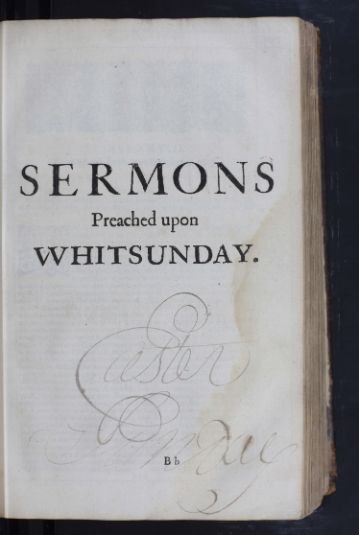
SERMONS
Preached upon
WHITSUNDAY. Bb
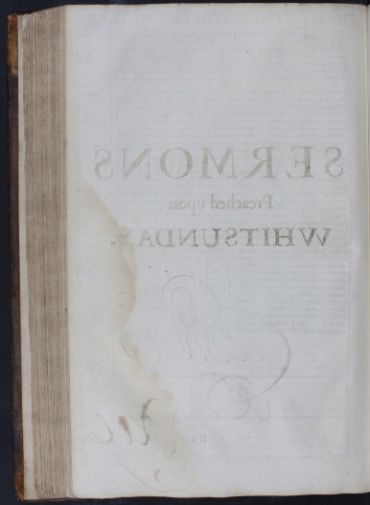
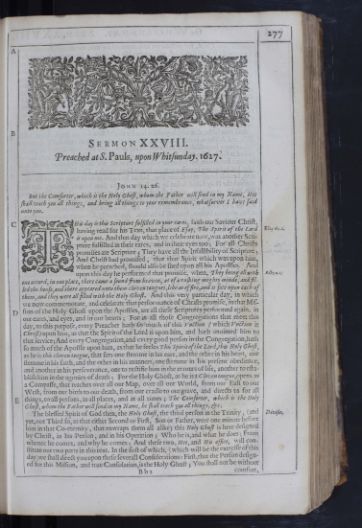 277
277
Sermon XXVIII.
Preached at S. Pauls, upon Whitsunday. 1627.
John 14.26.
But the Comforter, which is the Holy Ghost, whom the Father will send in my Name, Hee
shall teach you all things, and bring all things to your remembrance, whatsoever I have said
unto you.
THisThis day is this Scripture fulfilled in your cares, saith our Saviour Christ,
having read for his Text, that place of Esay,Esay 61.1. The Spirit of the Lord
is upon me. And that day which we celebrate now, was another Scri-
pture fulfilled in their eares, and in their eyes too; For all Christs
promises are Scripture; They have all the Infallibility of Scripture;
And Christ had promised, that that Spirit which was upon him,
when he preached, should also be shed upon all his Apostles. And
upon this day he performed that promise, when, Acts 2.1. They being all with
one accord, in one place, there came a sound from heaven, as of a rushing mighty winde, and fil-
led the house, and there appeared unto them cloven tongues, like as of fire, and it sate upon each of
them, and they were all filled with the Holy Ghost. And this very particular day, in which
we now commemorate, and celebrate that performance of Christs promise, in that Mis-
sion of the Holy Ghost upon the Apostles, are all these Scriptures performed again, in
our eares, and eyes, and in our hearts; For in all those Congregations that meet this
day, to this purpose, every Preacher hath so much of this Vnction (which Vnction is
Christ) upon him, as that the Spirit of the Lord is upon him, and hath anointed him to
that service; And every Congregation, and every good person in the Congregation, hath
so much of the Apostle upon him, as that he feeles This Spirit of the Lord, this Holy Ghost,
as he is this cloven tongue, that sets one stemme in his eare, and the other in his heart, one
stemme in his faith, and the other in his manners, one stemme in his present obedience,
and another in his perseverance, one to rectifie him in the errours of life, another to esta-
blish him in the agonies of death; For the Holy Ghost, as he is a Cloven tongue, opens as
a Compasse, that reaches over all our Map, over all our World, from our East to our
West, from our birth to our death, from our cradle to our grave, and directs us for all
things, to all persons, in all places, and at all times; The Comforter, which is the Holy
Ghost, whom the Father will send in my Name, he shall teach you all things, &c.
The blessed Spirit of God then, the Holy Ghost, the third person in the Trinity, Divisio. (and
yet, not Third so, as that either Second or First, Son or Father, were one minute before
him in that Co-eternity, that enwraps them all alike) this Holy Ghost is here designed
by Christ, in his Person, and in his Operation; Who he is, and what he does; From
whence he comes, and why he comes; And these two, Hee, and His office, will con-
stitute our two parts in this text. In the first of which, (which will be the exercise of this
day) we shall direct you upon these severall Considerations: First, that the Person design-
ed for this Mission, and true Consolation, is the Holy Ghost; You shall not be without Bb2 comfort,
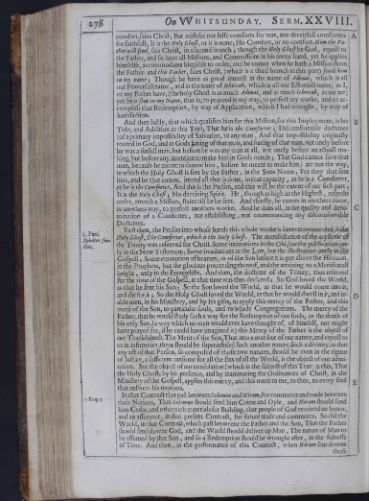 278
On VVWhitsunday.
Serm. XXVIII.
comfort, saies Christ; But mistake not false comforts for true, nor deceitfull comforters
278
On VVWhitsunday.
Serm. XXVIII.
comfort, saies Christ; But mistake not false comforts for true, nor deceitfull comforters
for faithfull; It is the Holy Ghost, or it is none; His Comfort, or no comfort, Him the Fa-
ther will send, sais Christ, in a second branch; though the Holy Ghost be God, equall to
the Father, and so have all Missions, and Commissions in his owne hand, yet he applies
himselfe, accommodates himselfe to order, and he comes when he hath a Mission from
the Father: and this Father, saies Christ, (which is a third branch in this part) sends him
in my name; Though he have as good interest in the name of Adonai, which is all
our Powerfull name, and in the name of Iehovah, which is all our Essentiall name, as I,
or my Father have, (the holy Ghost is as much Adonai, and as much Iehovah, as we are)
yet he is sent in my Name, that is, to proceed in my way, to perfect my worke, and to ac-
complish that Redemption, by way of Application, which I had wrought, by way of
Satisfaction.
And then lastly, that which qualifies him for this Mission, for this Imployment, is his
Title, and Addition in this Text, That he is the Comforter; Discomfortable doctrines
(of a primary impossibility of Salvation, to any man, And that impossibility originally
rooted in God, and in Gods hating of that man, and hating of that man, not onely before
he was a sinfull man, but before he was any man at all, not onely before an actuall ma-
king, but before any intention to make him in Gods minde; That God cannot save that
man, because he meant to damne him, before he meant to make him) are not the way,
in which the Holy Ghost is sent by the Father, in the Sons Name; For they that sent
him, and he that comes, intend all that is done, in that capacity, as he is a Comforter,
as he is the Comforter. And this is the Person, and this will be the extent of our first part;
It is the Holy Ghost; No deceiving Spirit. He, though as high as the Highest, respects
order, attends a Mission, staies till he be sent. And thirdly, he comes in anothers name,
in anothers way, to perfect anothers worke. And he does all, in the quality and deno-
mination of a Comforter, not establishing, not countenancing any discomfortable
Doctrines.
First then, 1. Part.
Spiritus san-
ctus. the Person into whose hands this whole worke is here recommended, is the
Holy Ghost, The Comforter, which is the Holy Ghost. The manifestation of the mysterle of
the Trinity was reserved for Christ. Some intimations in the Old, but the publication on-
ly in the New Testament; Some irradiations in the Law, but the illustration onely in the
Gospell; Some emanation of beames, as of the Sun before it is got above the Horizon,
in the Prophets, but the glorious proceeding thereof, and the attaining to a Meridianall
height, only in the Euangelists. And then, the doctrine of the Trinity, thus reserved
for the time of the Gospell, at that time was thus declared; So God loved the World,
as that he sent his Son; So the Son loved the World, as that he would come into it,
and die for it; So the Holy Ghost loved the World, as that he would dwell in it, and in-
able men, in his Ministery, and by his gifts, to apply this mercy of the Father, and this
merit of the Son, to particular souls, and to whole Congregations. The mercy of the
Father, that he would study such a way for the Redemption of our souls, as the death of
his only Son, (a way which no man would ever have thought of, of himself, nor might
have prayed for, if he could have imagined it) this Mercy of the Father is the object of
our Thankfulness. The Merit of the Son, That into a man but of our nature, and equall to
us in infirmities, there should be superinfused such another nature, such a divinity, as that
any act of that Person, so composed of those two natures, should be even in the rigour
of Justice, a sufficient ransome for all the sins of all the Werld, is the object of our admi-
ration. But the object of our consolation (which is the subject of this Text) is this, That
the Holy Ghost, by his presence, and by inanimating the Ordinances of Christ, in the
Ministery of the Gospell, applies this mercy, and this merit to me, to thee, to every soul
that answers his motions.
In that Contract that past between Solomon and Hiram, for commerce and trade between
their Nations, 1 King. 5. That Solomon should send him Corne and Oyle, and Hiram should send
him Cedar, and other rich materials for Building, that people of God received an honor,
and an assurance, in that present Contract, for future trade and commerce. So did the
World, in that Contract, which past betweene the Father and the Son, That the Father
should send downe God, and the World should deliver up Man, The nature of Man to
be assumed by that Son, and so a Redemption should be wrought after, in the fulnesse
of Time. And then, in the performance of this Contract, when Hiram sent downe those
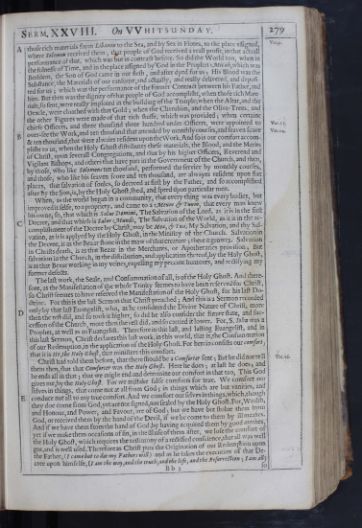 Serm. XXVIII.
On VVWhitsunday.
279
those rich materials from Libanon to the Sea, and by Sea in Flotes, to the place assigned,
Serm. XXVIII.
On VVWhitsunday.
279
those rich materials from Libanon to the Sea, and by Sea in Flotes, to the place assigned,
Ver. 9. where Solomon received them, that people of God received a reall profit, in that actuall
performance of that, which was but in contract before. So did the World too, when in
the fulnesse of Time, and in the place assigned by God in the Prophet Micah, which was
Bethlem, the Son of God came in our flesh, and after dyed for us; His Blood was the
Substance, the Materials of our ransome, and actually, and really delivered, and deposi-
ted for us; which was the performance of the former Contract between his Father, and
him. But then was the dignity of that people of God accomplisht, when those rich Mate-
rials, so sent, were really imploied in the building of the Temple; when the Altar, and the
Oracle, were cloathed with that Gold; when the Cherubim, and the Olive-Trees, and
the other Figures were made of that rich stuffe, which was provided; when certaine
chiefe Officers, and three thousand three hundred under-Officers, Ver. 15. were appointed to
over-see the Work, and ten thousand that attended by monthly courses, and seaven score Ver. 14.
& ten thousand, that were alwaies resident upon the Work. And so is our comfort accom-
plisht to us, when the Holy Ghost distributes these materials, the Blood, and the Merits
of Christ, upon severall Congregations, and that by his higher Officers, Reverend and
Vigilant Bishops, and others that have part in the Government of the Church, and
then, by those, who like Solomons ten thousand, performed the service by monthly courses,
and those, who like his seaven score and ten thousand, are alwayes resident upon fixt
places, that salvation of soules, so decreed at first by the Father, and so accomplished
after by the Son, is, by the Holy Ghost, shed, and spred upon particular men.
When, as the world began in a community, that every thing was every bodies, but
improved it selfe, to a propriety, and came to a Meum & Tuum, that every man knew
his owne; so, that which is Salus Domini, The Salvation of the Lord, as it is in the first
Decree, and that which is Salus Mundi, The Salvation of the World, as it is in the ac-
complishment of the Decree by Christ, may be Mea, & Tua, My Salvation, and thy Sal-
vation, as it is applyed by the Holy Ghost, in the Ministry of the Church. Salvation in
the Decree, is as the Bezar stone in the maw of that creature; there it growes. Salvation
in Christs death, is as that Bezar in the Merchants, or Apothecaries provision; But
salvation in the Church, in the distribution, and application thereof, by the Holy Ghost,
is as that Bezar working in my veines, expelling my peccant humours, and rectifying my
former defects.
The last work, the Seale, and Consummation of all, is of the Holy Ghost. And there-
fore, as the Manifestation of the whole Trinity seemes to have been reserved for Christ,
so Christ seemes to have reserved the Manifestation of the Holy Ghost, for his last Do-
ctrine. For this is the last Sermon that Christ preached; And this is a Sermon recorded
only by that last Euangelist, who, as he considered the Divine Nature of Christ, more
then the rest did, and so took it higher, so did he also consider the future state, and suc-
cession of the Church, more then the rest did, and so carried it lower. For, S. Iohn was a
Prophet, as well as an Euangelist. Therefore in this last, and lasting Euangelist, and in
this last Sermon, Christ declares this last work, in this world, that is, the Consummation
of our Redemption, in the application of the Holy Ghost. For herein consists our comfort,
that it is He, the Holy Ghost, that ministers this comfort.
Christ had told them before, that there should be a Comforter sent;Ver. 16. But he did not tell
them then, that that Comforter was the Holy Ghost. Here he does; at last he does; and
he ends all in that; that we might end and determine our comfort in that too, This God
gives me, by the Holy Ghost. For we mistake false comforts for true. We comfort our
selves in things, that come not at all from God; in things which are but vanities, and
conduce not all to any true comfort. And we comfort our selves in things, which, though
they doe come from God, yet are not signed, nor sealed by the Holy Ghost. For, Wealth,
and Honour, and Power, and Favour, are of God; but we have but stolne them from
God, or received them by the hand of the Devil, if we be come to them by ill meanes.
And if we have them from the hand of God, by having acquired them by good meanes,
yet if we make them occasions of sin, in the ill use of them after, we lose the comfort of
the Holy Ghost, which requires the testimony of a rectified conscience, that all was well
got, and is well used. Therefore as Christ puts the Origination of our Redemption upon
the Father, (I came but to doe my Fathers will) and as he takes the execution of that De-
cree upon himselfe, (I am the way, and the truth, and the life, and the Resurrection; I am all) Bb3 so
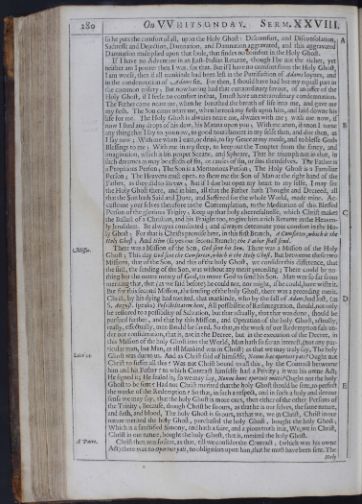 280
On VVWhitsunday.
Serm. XXVIII.
so he puts the comfort of all, upon the Holy Ghost: Discomfort, and Disconsolation,
280
On VVWhitsunday.
Serm. XXVIII.
so he puts the comfort of all, upon the Holy Ghost: Discomfort, and Disconsolation,
Sadnesse and Dejection, Damnation, and Damnation aggravated, and this aggravated
Damnation multiplied upon that soule, that findes no comfort in the Holy Ghost.
If I have no Adventure in an East-Indian Returne, though I be not the richer, yet
neither am I poorer then I was, for that. But if I have no comfort from the Holy Ghost,
I am worse, then if all mankinde had been left in the Putrifaction of Adams loynes, and
in the condemnation of Adams sin. For then, I should have had but my equall part in
the common misery; But now having had that extraordinary favour, of an offer of the
Holy Ghost, if I feele no comfort in that, I must have an extraordinary condemnation.
The Father came neare me, when he breathed the breath of life into me, and gave me
my flesh. The Son came neare me, when he took my flesh upon him, and laid downe his
life for me. The Holy Ghost is alwaies neare me, alwaies with me; with me now, if
now I shed any drops of his dew, his Manna upon you; With me anon, if anon I turne
any thing that I say to you now, to good nourishment in my selfe then, and doe then, as
I say now; With me when I eate, or drink, to say Grace at my meale, and to blesse Gods
Blessings to me; With me in my sleep, to keep out the Tempter from the fancy, and
imagination, which is his proper Sceane, and Spheare, That he triumph not in that, in
such dreames as may be effects of sin, or causes of sin, or sins themselves. The Father is
a Propitious Person; The Son is a Meritorious Person; The Holy Ghost is a Familiar
Person; The Heavens must open, to shew me the Son of Man at the right hand of the
Father, as they did to Steven; But if I doe but open my heart to my selfe, I may see
the Holy Ghost there, and in him, all that the Father hath Thought and Decreed, all
that the Son hath Said and Done, and Suffered for the whole World, made mine. Ac-
custome your selves therefore to the Contemplation, to the Meditation of this Blessed
Person of the glorious Trinity; Keep up that holy cheerefulnesse, which Christ makes
the Ballast of a Christian, and his Fraight too, to give him a rich Returne in the Heaven-
ly Jerusalem. Be alwayes comforted; and alwayes determine your comfort in the Ho-
ly Ghost; For that is Christs promise here, in this first Branch, A Comforter, which is the
Holy Ghost; And Him (sayes our second Branch) the Father shall send.
There was a Mission of the Son, Missio. God sent his Son. There was a Mission of the Holy
Ghost; This day God sent the Comforter, which is the Holy Ghost. But betweene these two
Missions, that of the Son, and this of the holy Ghost, we consider this difference, that
the first, the sending of the Son, was without any merit preceding; There could be no-
thing but the meere mercy of God, to move God to send his Son. Man was so far from
meriting that, that (as we said before) he could not, nor might, if he could, have wisht it.
But for this second Mission, the sending of the holy Ghost, there was a preceding merit.
Christ, by his dying had merited, that mankinde, who by the fall of Adam, had lost, (as
S. August. speaks) Possibilitatem boni, All possibilitie of Redintegration, should, not only
be restored to a possibility of Salvation, but that actually, that that was done, should be
pursued farther, and that by this Mission, and Operation of the holy Ghost, actually,
really, effectually, men should be saved. So that, as the work of our Redemption fals un-
der our consideration, that is, not in the Decree, but in the execution of the Decree, in
this Mission of the holy Ghost into the World, Man hath so far an interest, (not any par-
ticular man, but Man, as all Mankind was in Christ) as that we may truly say, The holy
Ghost was due to us.Luke 24. And as Christ said of himselfe, Nonne hæc oportuit pati? Ought not
Christ to suffer all this? Was not Christ bound to all this, by the Contract betweene
him and his Father? to which Contract himselfe had a Privity; it was his owne Act;
He signed it; He sealed it; so we may say, Nonne hunc oportuit mitti? Ought not the holy
Ghost to be sent? Had not Christ merited that the holy Ghost should be sent, to perfect
the worke of the Redemption? So that, in such a respect, and in such a holy and devout
sense we may say, that the holy Ghost is more ours, then either of the other Persons of
the Trinity; Because, though Christ be so ours, as that he is our selves, the same nature,
and flesh, and blood, The holy Ghost is so ours, as that we, we in Christ, Christ in our
nature merited the holy Ghost, purchased the holy Ghost, bought the holy Ghost;
Which is a sanctified Simony, and hath a faire, and a pious truth in it, We, we in Christ,
Christ in our nature, bought the holy Ghost, that is, merited the holy Ghost.
Christ then was so sent, A Patre. as that, till we consider the Contract, (which was his owne
Act) there was no Oportuit pati, no obligation upon him, that he must have been sent. The Holy
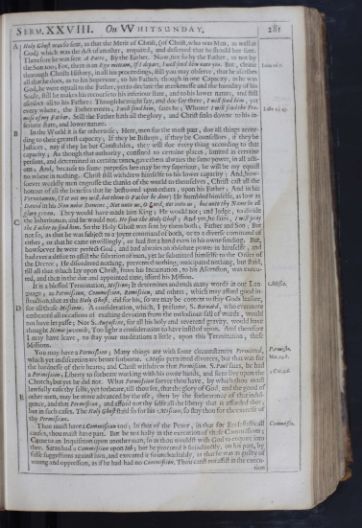 Serm. XXVIII.
On VVWhitsunday.
281
Holy Ghost was so sent, as that the Merit of Christ, (of Christ, who was Man, as well as
Serm. XXVIII.
On VVWhitsunday.
281
Holy Ghost was so sent, as that the Merit of Christ, (of Christ, who was Man, as well as
God) which was the Act of another, required, and deserved that he should bee sent.
Therefore he was sent A Patre, By the Father. Now, not so by the Father, as not by
the Son too; For, there is an Ego mittam, If I depart, I will send him unto you. But, Iohn 16.7. cleane
thorough Christs History, in all his proceedings, still you may observe, that he ascribes
all that he does, as to his Superiour, to his Father; though in one Capacity, as he was
God, he were equall to the Father, yet to declare the meekenesse and the humility of his
Soule, still he makes his recourse to his inferiour state, and to his lower nature, and still
ascribes all to his Father: Thouh he might say, and doe say there, I will send him, yet
every where, the Father enters; I will send him, saies he; Whom?Luke 24.49. I will send the Pro-
mise of my Father. Still the Father hath all the glory, and Christ sinks downe to his in-
feriour state, and lower nature.
In the World it is far otherwise; Here, men for the most part, doe all things accor-
ding to their greatest capacity; If they be Bishops, if they be Counsellors, if they be
Justices, nay if they be but Constables, they will doe every thing according to that
capacity; As though that authority, confined to certaine places, limited in certaine
persons, and determined in certaine times, gave them alwaies the same power, in all acti-
ons; And, because to some purposes hee may be my superiour, he will be my equall
no where in nothing. Christ still withdrew himselfe to his lower capacity; And, how-
soever worldly men engrosse the thanks of the world to themselves, Christ cast all the
honour of all the benefits that he bestowed upon others, upon his Father; And in his
Veruntamen, (Yet not my will, but thine O Father be done) He humbled himselfe, as low as
David in his Non nobis Dominc, Not unto us, O Lord, not unto us, but unto thy Name be all
glory given. They would have made him King; He would not; and Judge, to divide
the Inheritance; and he would not. He sent the Holy Ghost; And yet, he saies, I will pray
the Father to send him. So the Holy Ghost was sent by them both; Father and Son; But
not so, as that he was subject to a joynt command of both, or to a diverse command of
either, or that he came unwillingly, or had not a hand even in his owne sending. But,
howsoever he were perfect God, and had alwales an absolute power in himselfe, and
had ever a desire to assist the salvation of man, yet he submitted himselfe to the Order of
the Decree; He disordered nothing, prevented nothing, anticipated nothing, but staid,
till all that which lay upon Christ, from his Incarnation, to his Ascension, was execu-
ted, and then in the due and appointed time, issued his Mission.
It is a blessed Termination, Mission; It determines and ends many words in our Missio. Lan-
guage; as Permission, Commission, Remission, and others, which may afford good in-
struction, that as the Holy Ghost, did for his, so we may be content to stay Gods leasure,
for all those Missions. A consideration, which, I presume, S. Bernard, who evermore
embraced all occasions of exalting devotion from the melodious fall of words, would
not have let passe; Nor S. Augustine, for all his holy and reverend gravity, would have
thought Nimis juvenile, Too light a consideration to have insisted upon. And therefore
I may have leave, to stay your meditations a little, upon this Termination, these
Missions.
You may have a Permission; Many things are with some circumstances Permitted,
Permissio. which yet in discretion are better forborne. Moses permitted divorces, but that was for
the hardnesse of their hearts; and Christ withdrew that Permission. S. Paul saies, he had Mat. 19.8.
a Permission; Liberty to forbeare working with his owne hands, 1 Cor. 9.6. and so to live upon the
Church; but yet he did not. What Permission soever thou have, by which thou maist
lawfully ease thy selfe, yet forbeare, till thou see, that the glory of God, and the good of
other men, may be more advanced by the use, then by the forbearance of that indul-
gence, and that Permission, and afford not thy selfe all the liberty that is afforded thee,
but in such cases. The Holy Ghost staid so for his Mission; so stay thou for the exercise of
thy Permission.
Thou maist have a Commission too; In that of the Peace, Commissio. in that for Ecclesiasticall
causes, thou maist have part. But be not hasty in the execution of these Commissions;
Come to an Inquisition upon another man; so as thou wouldst wish God to enquire into
thee. Satan had a Commission upon Iob; but he procured it so indirectly, on his part, by
false suggestions against him, and executed it so uncharitably, as that he was as guilty of
wrong and oppression, as if he had had no Commission. Thou canst not assist in the execu-
tion
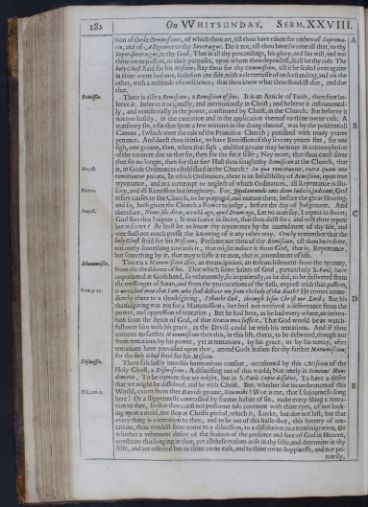 282
On VVWhitsunday.
Serm. XXVIII.
tion of those Commissions, of which thou art, till thou have taken the oathes of Suprema-
282
On VVWhitsunday.
Serm. XXVIII.
tion of those Commissions, of which thou art, till thou have taken the oathes of Suprema-cie, and of Allegeance to thy Soveraigne. Do it not, till thou have sworne all that, to thy
Super-soveraigne, to thy God, That in all thy proceedings, his glory, and his will, and not
thine owne passion, or their purposes, upon whom thou dependest, shall be thy rule. The
holy Ghost staid for his Mission; stay thou for thy Commission, till it be sealed over againe
in thine owne bosome; sealed on one side, with a cleerenesse of understanding, and on the
other, with a rectitude of conscience; that thou know what thou shouldst doe, and doe
that.
There is also a Remission;Remissio. a Remission of sins. It is an Article of Faith, therefore be-
leeve it. Beleeve it originally, and meritoriously in Christ; and beleeve it instrumental-
ly, and ministerially in the power, constituted by Christ, in the Church. But beleeve it
not too hastily, in the execution and in the application thereof to thine owne case. A
transitory sin, a sin that spent a few minutes in the doing thereof, was by the penitentiall
Canons, (which were the rule of the Primitive Church) punished with many yeares
penance. And doest thou thinke, to have Remission of thy seventy yeares sins, for one
sigh, one groane, then, when that sigh, and that groane may be more in contemplation
of the torment due to that sin, then for the sin it selfe; Nay more, that thou canst sinne
that sin no longer, then for that sin? Hast thou sought thy Remission at the Church, that
is, August. in Gods Ordinances established in the Church? In qua remittuntur, extra quam non
remittuntur peccata, In which Ordinances, there is an Infallibility of Remission, upon true
repentance, and in a contempt or neglect of which Ordinances, all Repentance is illu-
sory, and all Remission but imaginary.Hieron. For,
Quodammodo ante diem Iudicii, judicant, God
refers causes to the Church, to be prepared, and mature there, before the great Hearing;
and so, hath given the Church a Power to judge, before the day of Judgement. And
therefore, August. Nemo sibi dicat, occultè ago, apud Deum ago, Let no man say, I repent in secret;
God sees that I repent; It was scarce in secret, that thou didst sin; and wilt thou repent
but in secret? At least let us know thy repentance by the amendment of thy life, and
wee shall not much presse the knowing of it any other way. Onely remember that the
holy Ghost staid for his Mission; Presume not thou of thy Remission, till thou have done,
not onely something towards it, that might induce it from God, that is, Repentance,
but something by it, that may testifie it to man, that is, amendment of life.
There is a Manumission also, Manumission. an emancipation, an enfranchisement from the tyranny,
from the thraldome of sin. That which some Saints of God, particularly S. Paul, have
importuned at Gods hand, so vehemently, so impatiently, as he did, to be delivered from
the messenger of Satan, and from the provocations of the flesh, exprest with that passion,
O wretched man that I am,Rom. 7.22. who shall deliver me from the body of this death? He comes imme-
diately there to a thanksgiving, I thanke God, through Iesus Christ our Lord; But his
thanksgiving was not for a Manumission; hee had not received a deliverance from the
power, and oppresssion of tentation; But he had here, as he had every where, an intima-
tion from the Spirit of God, of that Gratia mea sufficit, That God would be as watch-
full over him with his grace, as the Devill could be with his tentations. And if thou
come to no farther Manumission then this, in this life, that is, to be delivered, though not
from tentations by his power, yet in tentations, by his grace, or by his mercy, after
tentations have prevailed upon thee, attend Gods leasure for thy farther Manumission,
for the holy Ghost staid for his Mission.
There fals lastly into this harmonious consort, Dismissio. occasioned by this Mission of the
Holy Ghost, a Dismission; A dismissing out of this world; Not onely in Simeons Nunc
dimittis, To be content that we might, but in S. Pauls Cupio dissolvi, To have a desire
that we might be dissolved, and be with Christ. But, whether the incumbrances of this
World, Psal. 120.5. extort from thee Davids groane, Heu mihi! Woe is me, that I so journe so long
here! Or a slipperinesse contracted by former habits of sin, make every thing a tenta-
tion to thee, so that thou canst not performe Iobs covenant with thine eyes, of not look-
ing upon a maid, nor stop at Christs period, which is, Looke, but doe not lust, but that
every thing is a tentation to thee, and to be out of this haile-shot, this batrery of ten-
tations, thou wouldst faine come to a dismission, to a dissolution, to a transmigration, Or
whether a vehement desire of the fruition of the presence and face of God in Heaven,
constitute this longing in thee, yet all these reasons arise in thy selfe, and determine in thy
selfe, and are referred but to thine owne ease, and to thine owne happinesse, and not pri-
marily,
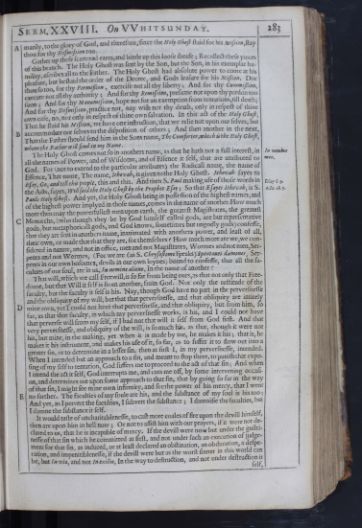 Serm. XXVIII.
On VVWhitsunday.
283
marily, to the glory of God, and therefore, since the Holy Ghost staid for his Mission, stay
Serm. XXVIII.
On VVWhitsunday.
283
marily, to the glory of God, and therefore, since the Holy Ghost staid for his Mission, stay
thou for thy Dismission too.
Gather up these scattered eares, and binde up this loose sheafe; Recollect these pieces
of this branch. The Holy Ghost was sent by the Son, but the Son, in his exemplar hu-
mility, ascribes all to the Father. The Holy Ghost had absolute power to come at his
pleasure, but he staid the order of the Decree, and Gods leasure for his Mission. Doe
thou so too, for thy Permission, exercise not all thy liberty; And for thy Commission,
execute not all thy authority; And for thy Remission, presume not upon thy pardon too
soon; And for thy Manumission, hope not for an exemption from tentations, till death;
And for thy Dismission, practice not, nay wish not thy death, only in respect of thine
own ease, no, nor only in respect of thine own salvation. In this act of the Holy Ghost,
That he staid his Mission, we have one instruction, that we relie not upon our selves, but
accommodate our selves to the disposition of others; And then another in the next,
That the Father should send him in the Sons name, The Comforter, which is the Holy Ghost,
whom the Father will send in my Name.
The Holy Ghost comes not so in anothers name, as that he hath not a full interest, In nomine
meo. in
all the names of Power, and of Wisdome, and of Essence it self, that are attributed to
God. For (not to extend to the particular attributes) the Radicall name, the name of
Essence, That name, The name, Iehovah, is given to the Holy Ghost. Iehovah sayes to
Esay, Go, and tell this people, this and this. And then S. Paul making use of those words in
the Acts, sayes, Well said the Holy Ghost by the Prophet Esay; Esay 6.9. So that Esayes Iehovah,Acts 28.5. is S.
Pauls Holy Ghost. And yet, the Holy Ghost being in possession of the highest names, and
of the highest power implyed in those names, comes in the name of another. How much
more then may the powerfullest men upon earth, the greatest Magistrates, the greatest
Monarchs, (who though they be by God himself called gods, are but representative
gods, but metaphoricall gods, and God knows, sometimes but ungodly gods) confesse,
that they are sent in anothers name, inanimated with anothers power, and least of all,
their own, or made that that they are, for themselves? How much more are we, we con-
sidered in nature, and not in office, men and not Magistrates, Wormes and not men, Ser-
pents and not Wormes, (For we are (as S. Chrysostome speaks)
Spontanei dæmones, Ser-
pents in our own bosomes, devils in our own loynes) bound to confesse, that all the fa-
culties of our soul, are in us, In nomine alieno, In the name of another?
That will, which we call Freewill, is so far from being ours, as that not only that Free-
dome, but that Will it self is from another, from God. Not only the rectitude of the
faculty, but the faculty it self is his. Nay, though God have no part in the perversnesse
and the obliquity of my will, but that that perversnesse, and that obliquity are intirely
mine own, yet I could not have that perversnesse, and that obliquity, but from him, so
far, as that that faculty, in which my perversnesse works, is his, and I could not have
that perverse will from my self, if I had not that will it self from God first. And that
very perversnesse, and obliquity of the will, is so much his, as that, though it were not
his, but mine, in the making, yet when it is made by me, he makes it his; that is, he
makes it his instrument, and makes his use of it, so far, as to suffer it to flow out into a
greater sin, or to determine in a lesser sin, then at first I, in my perversnesse, intended.
When I intended but an approach to a sin, and meant to stop there, to punish that expo-
sing of my self to tentation, God suffers me to proceed to the act of that sin; And when
I intend the act it self, God interrupts me, and cuts me off, by some intervening occasi-
on, and determines me upon some approach to that sin, that by going so far in the way
of that sin, I might see mine own infirmity, and see the power of his mercy, that I went
no farther. The faculties of my soule are his, and the substance of my soul is his too;
And yet, as I pervert the faculties, I subvert the substance; I damnifie the faculties, but
I damne the substance it self.
It would taste of uncharitablenesse, to cast more coales of fire upon the devill himself,
then are upon him in hell now; Or not to assist him with our prayers, if it were not de-
clared to us, that he is incapable of mercy. If the devill were now but under the guilti-
nesse of that sin which he committed at first, and not under such an execution of judge-
ment for that sin, as induced, or at least declared an obstination, an obduration, a despe-
ration, and impenitiblenesse, if the devill were but as the worst sinner in this world can
be, but In via, and not In exilio, In the way to destruction, and not under destruction it-
self,
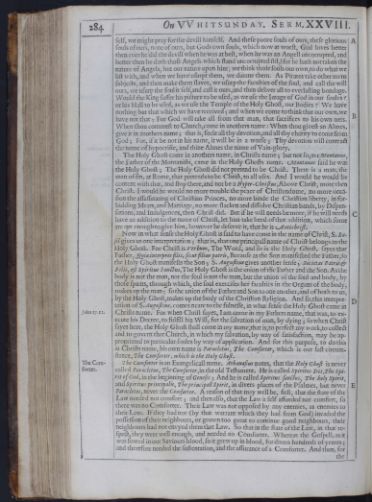 284
On VVWhitsunday.
Serm. XXVIII.
self, we might pray for the devill himself. And these poore souls of ours, these glorious
284
On VVWhitsunday.
Serm. XXVIII.
self, we might pray for the devill himself. And these poore souls of ours, these glorious
souls of ours, none of ours, but Gods own souls, which now at worst, God loves better
then ever he did the devill when he was at best, when he was an Angell uncorrupted, and
better then he doth those Angels which stand uncorrupted stil, (for he hath not taken the
nature of Angels, but our nature upon him) we think those souls our own, to do what we
list with, and when we have usurpt them, we damne them. As Pirates take other mens
subjects, and then make them slaves, we usurp the faculties of the soul, and call the will
ours, we usurp the soul it self, and call it ours, and then deliver all to everlasting bondage.
Would the King suffer his picture to be used, as we use the Image of God in our soules?
or his Hall to be used, as we use the Temple of the Holy Ghost, our Bodies? We have
nothing but that which we have received; and when we come to think that our own, we
have not that; For God will take all from that man, that sacrifices to his own nets.
When thou commest to Church, come in anothers name: When thou givest an Almes,
give it in anothers name; that is, feele all thy devotion, and all thy charity to come from
God; For, if it be not in his name, it will be in a worse; Thy devotion will contract
the name of hypocrisie, and thine Almes the name of Vain-glory.
The Holy Ghost came in anothers name, in Christs name; but not so, as Montanus,
the Father of the Montanists, came in the Holy Ghosts name. Montanus said he was
the Holy Ghost; The Holy Ghost did not pretend to be Christ. There is a man, the
man of sin, at Rome, that pretends to be Christ, to all uses. And I would he would be
content with that, and stop there, and not be a Hyper-Christus, Above Christ, more then
Christ. I would he would no more trouble the peace of Christendome, no more occa-
sion the assassinating of Christian Princes, no more binde the Christian liberty, in for-
bidding Meats, and Marriage, no more slacken and dissolve Christian bands, by Dispen-
sations, and Indulgences, then Christ did. But if he will needs be more, if he will needs
have an addition to the name of Christ, let him take heed of that addition, which some
are apt enough to give him, however he deserve it, that he is Antichrist.
Now in what sense the Holy Ghost is said to have come in the name of Christ, S. Ba-
sil gives us one interpretation; that is, that one principall name of Christ belongs to the
Holy Ghost. For Christ is Verbum, The Word, and so is the Holy Ghost, sayes that
Father, Quia interpres filii, sicut filius patris, Because as the Son manifested the Father, so
the Holy Ghost manifests the Son; S. Augustine gives another sense; Societas Patris &
Filii, est Spiritus Sanctus, The Holy Ghost is the union of the Father and the Son. As the
body is not the man, nor the soul is not the man, but the union of the soul and body, by
those spirits, through which, the soul exercises her faculties in the Organs of the body,
makes up the man; so the union of the Father and Son to one another, and of both to us,
by the Holy Ghost, makes up the body of the Christian Religion. And so, this interpre-
tation of S. Augustine, comes neare to the fulnesse, in what sense the Holy Ghost came in
Christs name.John 17.12. For when Christ sayes, I am come in my Fathers name, that was, to ex-
ecute his Decree, to fulfill his Will, for the salvation of man, by dying; so when Christ
sayes here, the Holy Ghost shall come in my name, that is, to perfect my work, to collect
and to govern that Church, in which my salvation, by way of satisfaction, may be ap-
propriated to particular soules by way of application. And for this purpose, to do this
in Christs name, his own name is Paracletus, The Comforter, which is our last circum-
stance, The Comforter, which is the Holy Ghost.
The Comforter is an Euangelicall name.The Com-
forter. Athanasius notes, that the Holy Ghost is never
called Paracletus, The Comforter, in the old Testament. He is called Spiritus Dei, The Spi-
rit of God, in the beginning of Genesis; And he is called Spiritus sanctus, The holy Spirit,
and Spiritus principalis, The principall Spirit, in divers places of the Psalmes, but never
Paracletus, never the Comforter. A reason of that may well be, first, that the state of the
Law needed not comfort; and then also, that the Law it self afforded not comfort, so
there was no Comforter. Their Law was not opposed by any enemies, as enemies to
their Law. If they had not (by that warrant which they had from God) invaded the
possession of their neighbours, or grown too great to continue good neighbours, their
neighbours had not envyed them that Law. So that in the state of the Law, in that re-
spect, they were well enough, and needed no Comforter. Whereas the Gospell, as it
was sowed in our Saviours blood, so it grew up in blood, for divers hundreds of yeares;
and therefore needed the sustentation, and the assurance of a Comforter. And then, for the
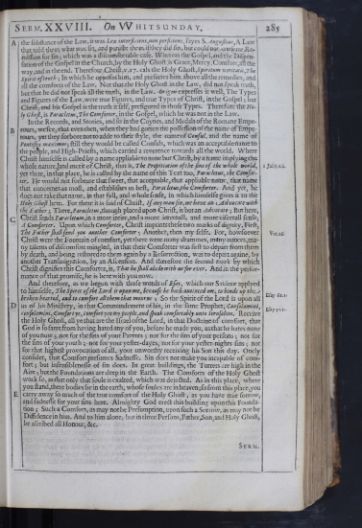 Serm. XXVIII.
On VVWhitsunday.
285
the substance of the Law, it was Lex interficiens, non perficiens, sayes S. Augustine, A Law
Serm. XXVIII.
On VVWhitsunday.
285
the substance of the Law, it was Lex interficiens, non perficiens, sayes S. Augustine, A Law
that told them what was sin, and punisht them if they did sin, but could not conferre Re-
mission for sin; which was a discomfortable case. Whereas the Gospel, and the Dispen-
sation of the Gospel in the Church, by the Holy Ghost, is Grace, Mercy, Comfort, all the
way, and in the end. Therefore Christ, v. 17. cals the Holy Ghost, Spiritum veritatis, The
Spirit of truth; In which he opposes him, and preferres him, above all the remedies, and
all the comforts of the Law. Not that the Holy Ghost in the Law, did not speak truth,
but that he did not speak all the truth, in the Law. Origen expresses it well, The Types
and Figures of the Law, were true Figures, and true Types of Christ, in the Gospel; but
Christ, and his Gospel is the truth it self, prefigured in those Types. Therefore the Ho-
ly Ghost, is Paracletus, The Comforter, in the Gospel, which he was not in the Law.
In the Records, and Stories, and so in the Coynes, and Medals of the Romane Empe-
rours, we see, that even then, when they had gotten the possession of the name of Empe-
rours, yet they forbore not to adde to their style, the name of Consul, and the name of
Pontifex maximus; still they would be called Consuls, which was an acceptable name to
the people, and High-Priests, which carried a reverence towards all the world. Where
Christ himselfe is called by a name appliable to none but Christ, by a name implying the
whole nature, and merit of Christ, that is, The Propitiation of the sins of the whole world,
1 John 2.2. yet there, in that place, he is called by the name of this Text too, Paracletus, the Comfor-
ter. He would not forbeare that sweet, that acceptable, that appliable name, that name
that concernes us most, and establishes us best, Paracletus, the Comforter. And yet, he
does not take that name, in that full, and whole sense, in which himselfe gives it to the
Holy Ghost here. For there it is said of Christ, If any man sin, we have an Advocate with
the Father; There, Paracletus, though placed upon Christ, is but an Advocate; But here,
Christ sends Paracletum, in a more intire, and a more internall, and more viscerall sense,
A Comforter. Upon which Comforter, Christ imprints these two marks of dignity, First,
The Father shall send you another Comforter; Another, then my selfe. For, Ver. 16. howsoever
Christ were the Fountain of comfort, yet there were many drammes, many ounces, ma-
ny talents of discomfort mingled, in that their Comforter was first to depart from them
by death, and being restored to them again by a Resurrection, was to depart againe, by
another Transmigration, by an Ascension. And therefore the second mark by which
Christ dignifies this Comforter, is, That he shall abide with us for ever. And in the perfor-
mance of that promise, he is here with you now.
And therefore, as we begun with those words of Esay, which our Saviour applyed
to himselfe, The Spirit of the Lord is upon me, because he hath anointed me,Esay 61.1. to binde up the
broken hearted, and to comfort all them that mourne; So the Spirit of the Lord is upon all
us of his Ministery, in that Commandement of his, in the same Prophet, Consolamini,
Esay 40.1. consolamini, Comfort ye, comfort yee my people, and speak comfortably unto Ierusalem. Receive
the Holy Ghost, all ye that are the Israel of the Lord, in that Doctrine of comfort, that
God is so farre from having hated any of you, before he made you, as that he hates none
of you now; not for the sins of your Parents; not for the sins of your persons; not for
the sins of your youth; not for your yester-dayes, not for your yester-nights sins; not
for that highest provocation of all, your unworthy receiving his Son this day. Onely
consider, that Comfort presumes Sadnesse. Sin does not make you incapable of com-
fort; but insensiblenesse of sin does. In great buildings, the Turrets are high in the
Aire; but the Foundations are deep in the Earth. The Comforts of the Holy Ghost
work so, as that only that soule is exalted, which was dejected. As in this place, where
you stand, there bodies lie in the earth, whose soules are in heaven; so from this place, you
carry away so much of the true comfort of the Holy Ghost, as you have true sorrow,
and sadnesse for your sins here. Almighty God erect this building upon this Founda-
tion; Such a Comfort, as may not be Presumption, upon such a Sorrow, as may not be
Diffidence in him. And to him alone, but in three Persons, Father, Son, and Holy Ghost,
be ascribed all Honour, &c. Serm.
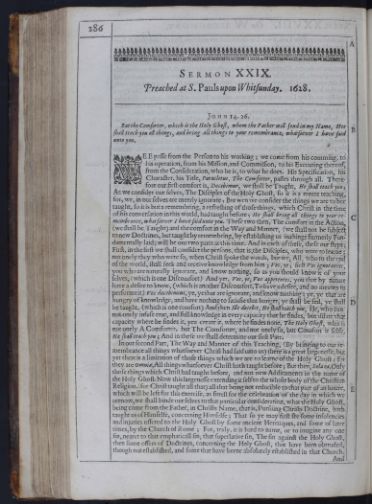 286
286
Sermon XXIX.
Preached at S. Pauls upon Whitsunday. 1628.
JOHN 14.26.
But the Comforter, which is the Holy Ghost, whom the Father will send in my Name, Hee
shall teach you all things, and bring all things to your remembrance, whatsoever I have said
unto you.
WEEWe passe from the Person to his working; we come from his comming, to
his operation, from his Mission, and Commission, to his Executing thereof,
from the Consideration, who he is, to what he does. His Specification, his
Character, his Title, Paracletus, The Comforter, passes through all. There-
fore our first comfort is, Docebimur, we shall be Taught, He shall teach you;
As we consider our selves, The Disciples of the Holy Ghost, so it is a meere teaching,
for, we, in our selves are meerly ignorant; But wen we consider the things we are to bee
taught, so it is but a remembring, a refreshing of those things, which Christ in the time
of his conversation in this world, had taught before; He shall bring all things to your re-
membrance, whatsoever I have said unto you. These two then, The comfort in the Action,
(we shall be Taught) and the comfort in the Way and Manner, (we shall not be subject
to new Doctrines, but taught by remembring, by establishing us in things formerly Fun-
damentally laid) will be our two parts at this time. And in each of these, these our steps;
First. in the first we shall consider the persons, that is, the Disciples, who were to learne;
not onely they who were so, when Christ spoke the words, but we, All, who to the end
of the world, shall seek and receive knowledge from him; Vos, ye; first Vos ignorantes,
you who are naturally ignorant, and know nothing, so as you should know it of your
selves, (which is one Discomfort) And yet, Vos, ye, Vos appetentes, you that by nature
have a desire to know, (which is another Discomfort, To have a desire, and no meanes to
performe it) Vos docebimini, ye, ye that are ignorant, and know nothing; ye, ye that are
hungry of knowledge, and have nothing to satisfie that hunger, ye shall be fed, ye shall
be taught; (which is one comfort) And then Ille docebit, He shall teach you, He, who can-
not onely infuse true, and full knowledge in every capacity that he findes, but dilate that
capacity where he findes it, yea create it, where he findes none, The Holy Ghost, who is
not onely A Comforter, but The Comforter, and not onely so, but Comfort it selfe,
He shall teach you; And in these we shall determine our first Part.
In our second Part, The Way and Manner of this Teaching, (By bringing to our re-
membrance all things whatsoever Christ had said unto us) there is a great largenesse, but
yet there is a limitation of those things which we are to learne of the Holy Ghost; for
they are Omnia, All things whatsoever Christ hath taught before; But then, Sola ea, Only
those things which Christ had taught before, and not new Additaments in the name of
the Holy Ghost. Now this largenesse extending it self to the whole body of the Christian
Religion, (for Christ taught all that) all that being not reducible to that part of an houre,
which will be left for this exercise, as fittest for the celebration of the day in which we
arenow, we shall binde our selves to that particular consideration, what the Holy Ghost,
being come from the Father, in Christs Name, that is, Pursuing Christs Doctrine, hath
taught us of Himselfe, concerning Himselfe; That so ye may first see some insolencies
and injuries offered to the Holy Ghost by some ancient Heretiques, and some of later
times, by the Church of Rome; For, truly, it is hard to name, or to imagine any one
sin, nearer to that emphaticall sin, that superlative sin, The sin against the Holy Ghost,
then some offers of Doctrines, concerning the Holy Ghost, that have been obtruded,
though not established, and some that have beene absolutely established in that Church. And
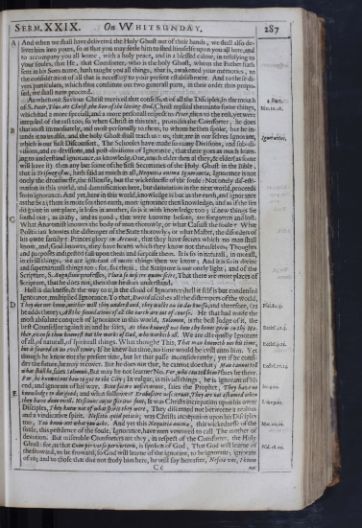 Serm. XXIX.
On VVWhitsunday.
287
And when we shall have delivered the Holy Ghost out of their hands, we shall also de-
Serm. XXIX.
On VVWhitsunday.
287
And when we shall have delivered the Holy Ghost out of their hands, we shall also de-liver him into yours, so as that you may feele him to shed himselfe upon you all here, and
to accompany you all home, with a holy peace, and in a blessed calme, in testifying to
your soules, that He, that Comforter, who is the holy Ghost, whom the Father hath
sent in his Sons name, hath taught you all things, that is, awakened your memories, to
the consideration of all that is necessary to your present establishment. And to these di-
vers particulars, which thus constitute our two generall parts, in their order thus propo-
sed, we shall now proceed.
As when our Saviour Christ received that confession of all the Disciples, 1 Part. in the mouth
of S. Peter, Thou art Christ, the Son of the living God, Christ replied thereunto some things,
Mat. 16.18. which had a more speciall, and a more personall respect to Peter, then to the rest, yet were
intended of the rest too; so when Christ in this text, promises the Comforter, he does
that most immediately, and most personally to them, to whom he then spoke, but he in-
tends it to us also, and the holy Ghost shall teach us: us, that are in our selves Ignorant,
Ignorantes. which is our first Discomfort. The Schooles have made so many Divisions, and sub-di-
visions, and re-devisions, and post-divisions of Ignorance, that there goes as much learn-
ing to understand ignorance, as knowleg. One, much elder then al they, & elder (as some
will have it) then any but some of the first Secretaries of the Holy Ghost in the Bible,
that is Trismegistus, hath said as much as all, Nequitia animæ Ignorantia, Ignorance is not
onely the drousinesse, the sillinesse, but the wickednesse of the soule: Not onely dis-esti-
mation in this world, and damnification here, but damnation in the next world, proceeds
from ignorance. And yet, here in this world, knowledge is but as the earth, and ignorance
as the Sea; there is more sea then earth, more ignorance then knowledge; and as if the sea
do gaine in one place, it loses in another, so is it with knowledge too; if new things be
found out, as many, and as good, that were knowne before, are forgotten and lost.
What Anatomist knowes the body of man thorowly, or what Casuist the soule? What
Politician knowes the distemper of the State thorowly; or what Master, the disorders of
his owne family? Princes glory in Arcanis, that they have secrets which no man shall
know, and, God knowes, they have hearts which they know not themselves; Thoughts
and purposes indigested fall upon them and surprise them. It is so in naturall, in morall,
in civill things; we are ignorant of more things then we know; And it is so in divine
and supernaturall things too; for, for them, the Scripture is our onely light, and of the
Scripture, S. Augustine professes, Plur a se nescire quam scire, That there are more places of
Scripture, that he does not, then that he does understand.
Hell is darknesse; & the way to it, is the cloud of Ignorance; hell it self is but condensed
Ignorance, multiplied Ignorance. To that, David ascribes all the distempers of the world,
They doe not know, neither will they understand, they walke on in darknesse; and therefore, Psal. 82.5. (as
he adds there) All the foundations of all the earth are out of course. He that had made the
most absolute conquest of Ignorance in this world, Solomon, is the best Judge of it, the
best Counsellor against it; and he saies, As thou knowest not how thy bones grew in thy Mo-
ther,Eccles. 11.5. even so thou knowest not the works of God, who worketh all. We are all equally Ignorant
of all, of naturall, of spirituall things. What though? This; That man knoweth not his time,
Eccles. 9.12. but is snared in an evill time, If he knew his time, no time would be evill unto him. Yet
though he know not the present time, but let that passe inconsiderately, yet if he consi-
der the future, he may recover. But he does not that, he cannot doe that;Eccles. 10.14. Man cannot tell
what shall be, saies Solomon; But may he not learne? No. For, who can tell him? saies he there.
For, he knowes not how to goe to the City; In vulgar, in triviall things, he is ignorant of his
end, and ignorant of his way. Bene facere nesciverunt, saies the Prophet, Ier. 4.22. They have no
knowledge to doe good; and what followes? Erubescere nescierunt, They are not ashamed when
they have done evill. Nesciunt cujus spiritus sunt;Luke 9.15. It was Christs increpation upon his owne
Disciples, They knew not of what spirit they were, They discerned not betweene a zealous
and a vindicative spirit. Nescitis quid petatis, was Christs increpation upon his Disciples
too, You know not what you aske. And yet this Nequitia animæ,Mat. 20.22. this wickednesse of the
soule, this pestilence of the soule, Ignorance, have men ventured to call The mother of
devotion. But miserable Comforters are they, in respect of the Comforter, the Holy
Ghost: for, as that Cum perver so perverteris, is spoken of God, Psal. 18.27. That God will learne of
the froward, to be froward, so God will learne of the ignorant, to be ignorant; ignorant
of us; and to those that doe not study him here, he will say hereafter, Nescio vos, I know Cc not
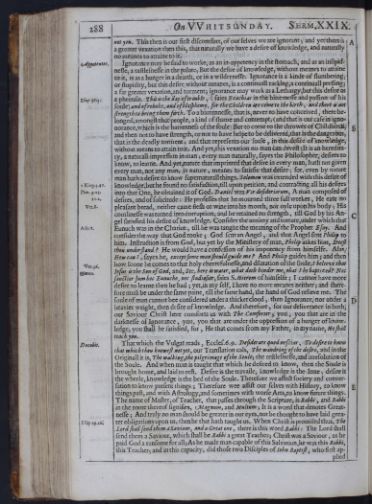 288
On VVWhitsunday.
Serm. XXVIX.
not you. This then is our first discomfort, of our selves we are ignorant; and yet there is
288
On VVWhitsunday.
Serm. XXVIX.
not you. This then is our first discomfort, of our selves we are ignorant; and yet there is
a greater vexation then this, that naturally we have a desire of knowledge, and naturally
no meanes to attaine to it.
Ignorance may be said to worke, Appetentes. as an in-appetency in the stomach, and as an insipid-
nesse, a tastlesnesse in the palate; But the desire of knowledge, without meanes to attaine
to it, is as a hunger in a dearth, or in a wildernesse. Ignorance is a kinde of slumbering,
or stupidity, but this desire without meanes, is a continuall racking, a continuall pressing;
a far greater vexation, and torment; ignorance may work as a Lethargy, but this desire as
a phrensie.Esay 37.3. This is the day of trouble, (saies Ezechias in the bitternesse and passion of his
soule) and of rebuke, and of blasphemy, for the Children are come to the birth, and there is not
strength to bring them forth. To a barrennesse, that is, never to have conceived, there be-
longed, amongst that people, a kind of shame and contempt, (and that is our case in igno-
norance, which is the barrenness of the soule) But to come to the throwes of Childbirth,
and then not to have strength, or not to have helpe to be delivered, that is the dangerous,
that is the deadly torment; and that represents our soule, in this desire of knowledge,
without means to attain to it. And yet, this vexation no man can devest; It is an heredita-
ry, a naturall impression in man; every man naturally, sayes the Philosopher, desires to
know, to learne. And yet, nature that imprinted that desire in every man, hath not given
every man, not any man, in nature, meanes to satisfie that desire; for, even by nature
man hath a desire to know supernaturall things. Solomon was extended with this desire of
knowledge, 1 King. 3.11. but he found no satisfaction, till upon petition, and contracting all his desires
into that One, Dan. 9.23. he obtained it of God. Daniel was Vir desideriorum, A man composed of
desires, Dan. 10.2. and of solicitude: He professes that he mourned three full weekes, He eate no
pleasant bread, Ver. 8. neither came flesh or wine into his mouth, nor oyle upon his body; His
comlinesse was turned into corruption, and he retained no strength, till God by his An-
gel satisfied his desire of knowledge. Consider the anxiety and torture, under which that
Eunuch was in the Chariot, Acts 8. till he was taught the meaning of the Prophet Esay. And
consider the way that God tooke; God sent an Angel, and that Angel sent Philip to
him. Instruction is from God, but yet by the Ministery of man, Philip askes him, Doest
thou understand? He would have a confession of his impotency from himselfe. Alas,
How can I, sayes he, except some man shouldguide me? And Philip guides him; and then
how soone he comes to that holy cheerefulnesse, Ver. 36. and dilatation of the soule, I beleeve that
Iesus is the Son of God,Hieron. and, See, here is water, what doth hinder me, that I be baptized? Nec
sanctior sum hoc Eunucho, nec studiosior, saies S. Hierom of himselfe; I cannot have more
desire to learne then he had; yet, in my self, I have no more meanes neither; and there-
fore must be under the same paine, till the same hand, the hand of God relieve me. The
soule of man cannot bee considered under a thicker cloud, then Ignorance, nor under a
heavier weight, then desire of knowledge. And therefore, for our deliverance in both,
our Saviour Christ here comforts us with The Comforter; you, you that are in the
darknesse of Ignorance, you, you that are under the oppression of a hunger of know-
ledge, you shall be satisfied, for, He that comes from my Father, in my name, He shall
teach you.
That which the Vulgat reads, Docebit. Eccles. 6.9. Desider are quod nescias, To desire to know
that which thou knowest not yet, our Translation cals, The wandring of the desire, and in the
Originall it is, The walking, the pilgrimage of the Soule; the rest lesnesse, and irresolution of
the Soule. And when man is taught that which he desired to know, then the Soule is
brought home, and laid to rest. Desire is the travaile, knowledge is the Inne; desire is
the wheele, knowledge is the bed of the Soule. Therefore we affect society and conver-
sation to know present things; Therefore wee assist our selves with History, to know
things past, and with Astrology, and sometimes with worse Arts, to know future things.
The name of Master, of Teacher, that passes through the Scripture, is Rabbi, and Rabbi
in the roote thereof signifies, Magnum, and Multum; It is a word that denotes Great-
nesse; And truly no man should be greater in our eyes, nor be thought to have laid grea-
ter obligations upon us, Esay 19.20. then he that hath taught us. When Christ is promised thus, The
Lord shall send them a Saviour, and a Great one, there is this word Rabbi: The Lord shall
send them a Saviour, which shall be Rabbi a great Teacher; Christ was a Saviour, as he
paid God a ransome for all; As he made man capable of this Salvation, he was this Rabbi,
this Teacher; and in this capacity, did those two Disciples of Iohn Baptist, who first ap plied
 Serm. XXIX.
On VVWhitsunday.
289
plied themselves to Christ, apply themselves, Magister ubi habitas? Master,John 1.38. where
Serm. XXIX.
On VVWhitsunday.
289
plied themselves to Christ, apply themselves, Magister ubi habitas? Master,John 1.38. where
dwellest thou? where may we come to School to thee? where may we be taught by
thee? S. Paul hath shewed us the duty of all true disciples, in the practise of the Galati-
ans; You received me as an Angel of God, even as Christ Iesus, and I beare you record,Gal. 4.14. that
if it had been possible, you would have plucked out your own eyes, and have given them to me.
I thank him that brings me a candle, when it grows dark, and him that assists me with a
spectacle, when my sight grows old; But to him that hath given the eyes of my soul,
light and spectacles, how much a greater debtor am I? I will not dispute against nature,
nor naturall affections, nor dispute against Allegeance, nor civill obligations, nor dispute
against gratitude, nor retribution of Benefits; But I willingly pronounce, that I cannot
owe more to any Benefactor, to my Father, to my Prince, then I do to them that have
taught me; nor can there be a deeper ingratitude, then to turn thy face from that man,
or from his children, that hath taught thee. This Christ presents for the first Comfort,
Docebimini You are ignorant, but that cloud shall be dispersed, you would learne, but
have no help, but that defect shall be supplyed, you shall be taught: And then, this com-
fort shall be exalted to you, in the person of the Teacher, Ille docebit He whom the Fa-
ther will send in my name, He shall teach you.
Quintilian requires no more of a School-master, but that either he be learned, Ille. or doe
not think himself to be so, if he be not: Because if he over-value himself, he will admit no
Usher, no assistant. Here we have a master that is both absolute in himself, and yet under-
taken for by others too; The Father sends him, and in the Sons name, that is, to perfect the
Sons work. Tertullian (a man of adventurous language) calls him Tertium numen divi-
nitatis, & tertium nomen majestatis: The Holy Ghost hath but a third place, but the same
God-head, but a third name, yet the same Majesty, as the first, The Father, or the second,
The Son. Porphyry that denied the Trinity, is convinced by S. Cyril, to have established
a Trinity, because he acknowledged first Deum summum, and then, Conditorem omnium,
and after them, Animam mundi; One that is a supream God, One that was the Creator
of all things, and One that quickens and inanimates all, and is the soul of the whole
world: And this soul of the world is the Holy Ghost, who doth that office to the soule
of every Christian, which the soul it self doth to every naturall man, informes him, di-
rects him, instructs him, makes him be that he is, and do that he doth. And therefore
as Tertullian cals Christ by the Holy Ghosts name, (for he calls Christ Spiritum Dei, be-
cause, as the office of our spirits is to unite the body and the soul, so Christ hath united
God and man in one Emanuel) S. Basil gives the Holy Ghost Christs name, for he calls
the Holy Ghost Verbum Dei, The word of God, because he undertakes the Pedagogy of
the soul, to be the soules School-master, and to teach it as much of God as concernes it,
that is, Christ crucified. Therefore when the Holy Ghost was first sent, he was sent but
to testifie of Christ; At Christs Baptisme (which was his first sending) he was sent but
to establish an assurance, and a beliefe, that that Christ was the Son of God, in whom he
was well pleased; And this he did but as a witnesse, not as a Teacher; for the voice
that wrought this, and taught this, came not from the Dove, not from the Holy Ghost,
but from above; The Holy Ghost said nothing then. But when the Holy Ghost in per-
formance of Christs promise in this Text, was sent as a Teacher, then he came in the
form of Tongues, and they that received him, were thereby presently enabled to speak
to others.
This therefore is the comming, and this is the teaching of the Holy Ghost, Acts 2.3. promised
and intended in this Text, and performed upon this Day, that he by his power enables
and authorises other men to teach thee; That he establishes a Church, and Ordinances,
and a Ministery, by which thou maist be taught how to apply Christs Merits to thy soul.
He needed not to have invested, and taken the form of a Tongue, if he would have had
thee think it enough to heare the Spirit at home, alone; but to let thee see, that his way
of teaching should be the ministery of men, he came in that organ of speech, the Tongue.
And therefore learn thou by hearing, what he sayes: And that that he sayes, he sayes
here; here in his Ordinance. And therefore heare what he hath declared, inquire not
what he hath decreed; Heare what he hath said, there, where he hath spoken, ask not
what he meant in his unrevealed will, of things whereof he hath said nothing; For they
that do so, mistake Gods minde often. God protests, It never came into my minde, that
they should sin thus; God never did it, God never meant it, that any should sin necessarily, Ier. 32.35. Cc2 without
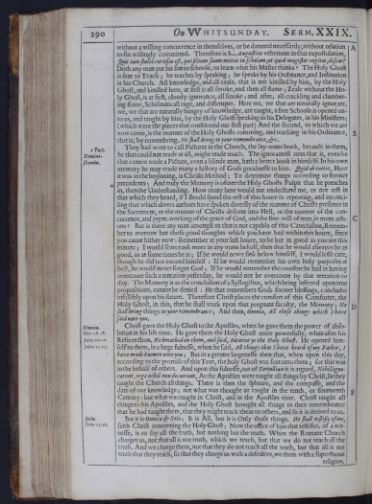 290
On Whitsunday.
Serm. XXVIX.
without a willing concurrence in themselves, or be damned necessarily, without relation
290
On Whitsunday.
Serm. XXVIX.
without a willing concurrence in themselves, or be damned necessarily, without relation
to sin willingly committed. Therefore is S. Augustine vehement in that expostulation,
Quis tam stultè curiosus est, qui filium suum mittat in scholam, ut quid magister cogitat, discat?
Doth any man put his son to schoole, to learn what his Master thinks? The Holy Ghost
is sent to Teach; he teaches by speaking; he speaks by his Ordinance, and Institution
in his Church. All knowledge, and all zeale, that is not kindled by him, by the Holy
Ghost, and kindled here, at first is all smoke, and then all flame; Zeale without the Ho-
ly Ghost, is at first, cloudy ignorance, all smoke; and after, all crackling and clamber-
ing flame, Schismaticall rage, and distemper. Here we, we that are naturally ignorant,
we, we that are naturally hungry of knowledge, are taught, a free Schoole is opened un-
to us, and taught by him, by the Holy Ghost speaking in his Delegates, in his Ministers;
(which were the pieces that constituted our first part) And the second, to which we are
now come, is the manner of the Holy Ghosts comming, and teaching in his Ordinance,
that is, by remembring, He shall bring to your remembrance, &c.
They had wont to call Pictures in the Church, 2 Part.
Remini-
scentia. the lay-mans book, because in them,
he that could not reade at all, might reade much. The ignorantest man that is, even he
that cannot reade a Picture, even a blinde man, hath a better book in himself; In his own
memory he may reade many a history of Gods goodnesse to him. Quid ab initio, How
it was in the beginning, is Christs Method; To determine things according to former
precedents; And truly the Memory is oftner the Holy Ghosts Pulpit that he preaches
in, then the Understanding. How many here would not understand me, or not rest in
that which they heard, if I should spend the rest of this houre in repeating, and reconci-
ling that which divers authors have spoken diversly of the manner of Christs presence in
the Sacrament, or the manner of Christs descent into Hell, or the manner of the con-
currence, and joynt-working of the grace of God, and the free-will of man, in mens acti-
ons? But is there any man amongst us that is not capable of this Catechisme, Remem-
ber to morrow but those good thoughts which you have had within this houre, since
you came hither now: Remember at your last houre, to be but as good as you are this
minute; I would scarce ask more in any mans behalf, then that he would alwayes be as
good, as at some times he is; If he would never sink below himself, I would lesse care,
though he did not exceed himself: If he would remember his own holy purposes at
best, he would never forget God; If he would remember the comfort he had in having
overcome such a tentation yesterday, he would not be overcome by that tentation to
day. The Memory is as the conclusion of a Syllogisme, which being inferred upon true
propositions, cannot be denied: He that remembers Gods former blessings, concludes
infallibly upon his future. Therefore Christ places the comfort of this Comforter, the
Holy Ghost, in this, that he shall work upon that pregnant faculty, the Memory; He
shall bring things to your remembrance; And then, Omnia, All those things which I have
said unto you.
Christ gave the Holy Ghost to the Apostles, Omnia. when he gave them the power of abso-
lution in his life time. He gave them the Holy Ghost more powerfully, when after his Mat. 18.18.
Resurrection,He breathed on them, and said, Receive ye the Holy Ghost. He opened John 20.22. him-
self to them, in a large fulnesse, when he said, All things that I have heard of my Father, I John 15.15.
have made knowen unto you; But in a greater largenesse then that, when upon this day,
according to the promise of this Text, the holy Ghost was sent unto them; for this was
in the behalf of others. And upon this fulnesse, out of Tertullian it is argued, Nihiligno-
rarunt, crgo nihil non docuerunt, As the Apostles were taught all things by Christ, so they
taught the Church all things. There is then the spheare, and the compasse, and the
date of our knowledge; not what was thought or taught in the tenth, or fourteenth
Century: but what was taught in Christ, and in the Apostles time. Christ taught all
things to his Apostles, and the Holy Ghost brought all things to their remembrance
that he had taught them, that they might teach them to others, and so it is derived to us.
But it is Omnia & Sola; Sola. It is All, but it is Only those things. He shall testifie of me,
saith Christ concerning the Holy Ghost; Now the office of him that testifies, John 15.26. of a wit-
nesse, is to say all the truth, but nothing but the truth. When the Romane Church
charges us, not that all is not truth, which we teach, but that we do not teach all the
truth, And we charge them, not that they do not teach all the truth, but that all is not
truth that they teach, so that they charge us with a defective, we them with a superfluous religion,
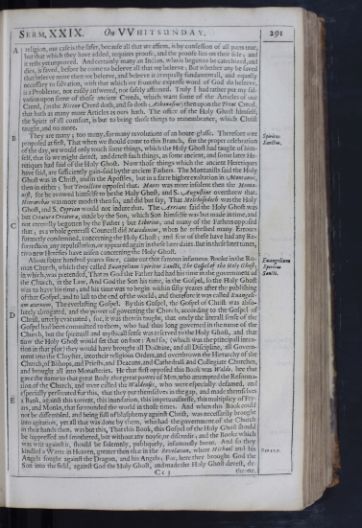 Serm. XXIX.
On VVWhitsunday.
291
religion, our case is the safer, because all that we affirm, is by confession of all parts true,
Serm. XXIX.
On VVWhitsunday.
291
religion, our case is the safer, because all that we affirm, is by confession of all parts true,
but that which they have added, requires proofe, and the proofe lies on their side; and
it rests yet unproved. And certainly many an Indian, who is begun to be catechized, and
dies, is saved, before he come to beleeve all that we beleeve; But whether any be saved
that beleeve more then we beleeve, and beleeve it as equally fundamentall, and equally
necessary to salvation, with that which we from the expresse word of God do beleeve,
is a Probleme, not easily answered, not safely affirmed. Truly I had rather put my sal-
vation upon some of those ancient Creeds, which want some of the Articles of our
Creed, (as the Nicene Creed doth, and so doth Athanasius) then upon the Trent Creed,
that hath as many more Articles as ours hath. The office of the Holy Ghost himself,
the Spirit of all comfort, is but to bring those things to remembrance, which Christ
taught, and no more.
They are many; too many, for many revolutions of an houre-glasse.Spiritus
Sanctus. Therefore wee
proposed at first, That when we should come to this Branch, for the proper celebration
of the day, we would only touch some things, which the Holy Ghost had taught of him-
self, that so we might detect, and detest such things, as some ancient, and some later He-
retiques had said of the Holy Ghost. Now those things which the ancient Heretiques
have said, are sufficiently gain-said by the ancient Fathers. The Montanists said the Holy
Ghost was in Christ, and in the Apostles, but in a farre higher exaltation in Montanus,
then in either; but Tertullian opposed that. Manes was more insolent then the Monta-
nist, for he avowed himselfe to be the Holy Ghost, and S. Augustine overthrew that.
Hierarchas was more modest then so, and did but say, That Melchisedech was the Holy
Ghost, and S. Cyprian would not indure that. The Arrians said the Holy Ghost was
but Creatura Creaturæ, made by the Son, which Son himselfe was but made in time, and
not eternally begotten by the Father; but Liberius, and many of the Fathers opposed
that; as a whole generall Councell did Macedonius, when he refreshed many Errours
formerly condemned, concerning the Holy Ghost; and few of these have had any Re-
surrection, any repulullation, or appeared again in these later daies. But in these later times,
two new Herefies have arisen concerning the Holy Ghost.
About foure hundred yeares since, Euangelium
Spiritus
Sancti. came out that famous infamous Booke in the Ro-
man Church, which they called Euangelium Spiritus Sancti, The Gospel of the Holy Ghost;
in which, was pretended, That as God the Father had had his time in the government of
the Church, in the Law, And God the Son his time, in the Gospel, so the Holy Ghost
was to have his time; and his time was to begin within fifty yeares after the publishing
of that Gospel, and to last to the end of the world; and therefore it was called Euangeli-
um æternum, The everlasting Gospel. By this Gospel, the Gospel of Christ was abso-
lutely abrogated, and the power of governing the Church, according to the Gospel of
Christ, utterly evacuated; for, it was therein taught, that onely the literall sense of the
Gospel had been committed to them, who had thus long governed in the name of the
Church, but the spirituall and mysticall sense was reserved to the Holy Ghost, and that
now the Holy Ghost would set that on foot: And so, (which was the principall inten-
tion in that plot) they would have brought all Doctrine, and all Discipline, all Govern-
ment into the Cloyster, into their religious Orders, and overthrown the Hierarchy of the
Church, of Bishops, and Priests, and Deacons, and Cathedrall and Collegiate Churches,
and brought all into Monasteries. He that first opposed this Book was Waldo, hee that
gave the name to that great Body, that great power of Men, who attempted the Reforma-
tion of the Church, and were called the Waldenses, who were especially defamed, and
especially persecuted for this, that they put themselves in the gap, and made themselves
a Bank, against this torrent, this inundation, this impetuousnesse, this multiplicy of Fry-
ars, and Monks, that surrounded the world in those times. And when this Book could
not be dissembled, and being full of blasphemy against Christ, was necessarily brought
into agitation, yet all that was done by them, who had the government of the Church
in their hands then, was but this, That this Book, this Gospel of the Holy Ghost should
be suppressed and smothered, but without any noyse, or discredit; and the Booke which
was writ against it, should be solemnly, publiquely, infamously burnt. And so they
kindled a Warre in Heaven, greater then that in the Revelation,Rev. 12.7. where Michael and his
Angels fought against the Dragon, and his Angels; For, here they brought God the
Son into the field, against God the Holy Ghost, and made the Holy Ghost devest, de-
Cc3 throne,
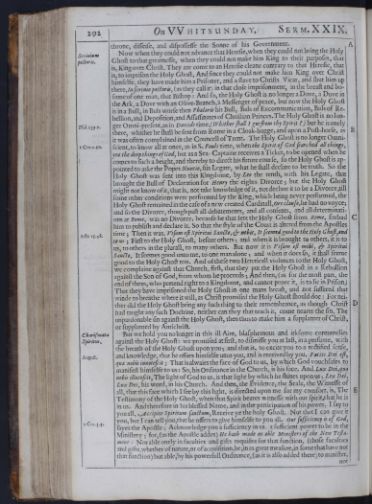 292
On VVWhitsunday.
Serm. XXVIX.
throne, disseise, and dispossesse the Sonne of his Government.
292
On VVWhitsunday.
Serm. XXVIX.
throne, disseise, and dispossesse the Sonne of his Government.
Now when they could not advance that Heresie, Scrinium
pectoris. when they could not bring the Holy
Ghost to that greatnesse, when they could not make him King to their purposes, that
is, King over Christ, They are come to an Heresie cleane contrary to that Heresie, that
is, to imprison the Holy Ghost, And since they could not make him King over Christ
himselfe, they have made him a Prisoner, and a flave to Christs Vicar, and shut him up
there, In scrinio pectoris, (as they call it) in that close imprisonment, in the breast and bo-
some of one man, that Bishop: And so, the Holy Ghost is no longer a Dove, a Dove in
the Ark, a Dove with an Olive-Branch, a Messenger of peace, but now the Holy Ghost
is in a Bull, in Buls worse then Phalaris his Bull, Buls of Excommunication, Buls of Re-
bellion, and Deposition, and Assassinates of Christian Princes. The Holy Ghost is no lon-
ger Omni-present, Psal. 139.7. as in Davids time, (Whither shall I goe from thy Spirit?) but he is onely
there, whither he shall be sent from Rome in a Cloak-bagge, and upon a Post-horse, as
it was often complained in the Councell of Trent. The Holy Ghost is no longer Omni-
scient, to know all at once, 1 Cor. 2.10.. as in S. Pauls time, when the Spirit of God searched all things,
yea the deep things of God, but as a Sea-Captaine receives a Ticket, to be opened when he
comes to such a height, and thereby to direct his future course, so the Holy Ghost is ap-
pointed to aske the Popes Nuntio, his Legate, what he shall declare to be truth. So the
Holy Ghost was sent into this Kingdome, by Leo the tenth, with his Legate, that
brought the Bull of Declaration for Hcnry the eights Divorce; but the Holy Ghost
might not know of it, that is, not take knowledge of it, not declare it to be a Divorce, till
some other conditions were performed by the King, which being never performed, the
Holy Ghost remained in the case of a new created Cardinall, Ore clauso, he had novoyce;
and so the Divorce, though past all debatements, and all consents, and all determinati-
ons at Rome, was no Divorce, because he that sent the Holy Ghost from Rome, forbad
him to publish and declare it. So that the style of the Court is altered from the Apostles
time;Acts 15.28. Then it was, Visum est Spiritui Sancto, & nobis, It seemed good to the Holy Ghost, and
to us; First to the Holy Ghost, before others; and when it is brought to others, it is to
us, to others in the plurall, to many others. But now it is Visum est mihi, & Spiritui
Sancto, It seemes good unto me, to one man alone; and when it does so, it shall seeme
good to the Holy Ghost too. And of these two Hereticall violences to the Holy Ghost,
we complaine against that Church, first, that they put the Holy Ghost in a Rebellion
against the Son of God, from whom he proceeds; And then, (as for the most part, the
end of them, who pretend right to a Kingdome, and cannot prove it, is to lie in Prison)
That they have imprisoned the Holy Ghost in one mans breast, and not suffered that
winde to breathe where it will, as Christ promised the Holy Ghost should doe: For nei-
ther did the Holy Ghost bring any such thing to their remembrance, as though Christ
had taught any such Doctrine, neither can they that teach it, come nearer the sin, The
unpardonable sin against the Holy Ghost, then thus to make him a supplanter of Christ,
or supplanted by Antichrist.
But we hold you no longer in this ill Aire, Charismata
Spiritus. blasphemous and irksome contumelies
against the Holy Ghost: we promised at first, to dismisse you at last, in a perfume, with
the breath of the Holy Ghost upon you; and that is, to excite you to a rectified sense,
and knowledge, August. that he offers himselfe unto you, and is received by you. Facies Dei est,
qua nobis innotescit; That is alwaies the face of God to us, by which God vouchsafes to
manifest himselfe to us: So, his Ordinance in the Church, is his face. And Lux Dei, qua
nobis illucescit, The light of God to us, is that light by which he shines upon us; Lex Dei,
Lux Dei, his word, in his Church. And then, the Evidence, the Seale, the Witnesse of
all, that this face which I see by this light, is directed upon me for my comfort, is, The
Testimony of the Holy Ghost, when that Spirit beares witnesse with our spirit, that he is
in us. And therefore in his blessed Name, and in the participation of his power, I say to
you all, Accipite Spiritum sanctum, Receive ye the holy Ghost. Not that I can give it
you, 2 Cor. 3.5. but I can tell you, that he offers to give himselfe to you all. Our sufficiency is of God,
sayes the Apostle; Acknowledge you a sufficiency in us, a sufficient power to be in the
Ministery; for, (as the Apostle addes) He hath made us able Ministers of the New Testa-
ment: Not able onely in faculties and gifts requisite for that function, (those faculties
and gifts, whether of nature, or of acquisition, be, in as great measure, in some that have not
that function) but able, by his powerfull Ordinance, (as it is also added there) to minister, not
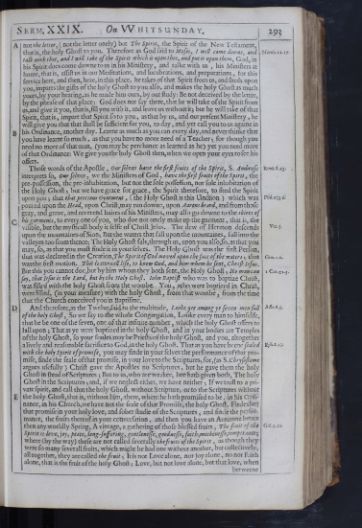 Serm. XXIV.
On Whitsunday.
293
not the letter, (not the letter onely) but The Spirit, the Spirit of the New Testament,
Serm. XXIV.
On Whitsunday.
293
not the letter, (not the letter onely) but The Spirit, the Spirit of the New Testament,
that is, the holy Ghost to you. Therefore as God said to Moses, I will come downe,Numb. 11.17 and
talk with thee, and I will take of the Spirit which is upon thee, and put it upon them, God, in
his Spirit does come downe to us in his Ministery, and talke with us, his Ministers at
home, that is, assist us in our Meditations, and lucubrations, and preparations, for this
service here, and then, here, in this place, he takes of that Spirit from us, and sheds upon
you, imparts the gifts of the holy Ghost to you also, and makes the holy Ghost as much
yours, by your hearing, as he made him ours, by our study: Be not deceived by the letter,
by the phrase of that place; God does not say there, that he will take of the Spirit from
us, and give it you, that is, fill you with it, and leave us without it; but he will take of that
Spirit, that is, impart that Spirit so to you, as that by us, and our present Ministery, he
will give you that that shall be sufficient for you, to day, and yet call you to us againe in
his Ordinance, another day. Learne as much as you can every day, and never thinke that
you have learnt so much, as that you have no more need of a Teacher; for though you
need no more of that man, (you may be perchance as learned as he) yet you need more
of that Ordinance: We give you the holy Ghost then, when we open your eyes to see his
offers.
Those words of the Apostle, Our selves have the first fruits of the Spirit,Rom. 8.23. S. Ambrose
interprets so, Our selves, we the Ministers of God, have the first fruits of the Spirit, the
pre-possession, the pre-inhabitation, but not the sole possession, nor sole inhabitation of
the Holy Ghost; but we have grace for grace, the Spirit therefore, to shed the Spirit
upon you; that that precious Oyntment,Psal. 133.2. (the Holy Ghost is this Unction) which was
poured upon the Head, upon Christ, may run downe, upon Aarons beard, and from those
gray, and grave, and reverend haires of his Ministers, may also go downe to the skirts of
his garments, to every one of you, who doe not onely make up the garment, that is, the
visible, but the mysticall body it selfe of Christ Jesus.Ver. 3. The dew of Hermon descends
upon the mountaines of Sion; But the waters that fall upon the mountaines, fall into the
valleyes too from thence; The Holy Ghost fals, through us, upon you also, so, as that you
may, so, as that you must finde it in your selves. The Holy Ghost was the first Person,
that was declared in the Creation, The Spirit of God moved upon the face of the waters,Gen. 1.2. that
was the first motion. This is eternall life, to know God, and him whom he sent, Christ Iesus.
But this you cannot doe, but by him whom they both sent, the Holy Ghost;1 Cor. 12.3. No man can
say, that Iesus is the Lord, but by the Holy Ghost. Iohn Baptist who was to baptize Christ,
was filled with the holy Ghost from the wombe. You, who were baptized in Christ,
were filled, (in your measure) with the holy Ghost, from that wombe, from the time
that the Church conceived you in Baptisme.
And therefore, as the Twelve said to the multitude, Acts 6.3. Looke yee among ye seven men full
of the holy Ghost, So we say to the whole Congregation, Looke every man to himselfe,
that he be one of the seven, one of that infinite number, which the holy Ghost offers to
fall upon; That as ye were baptized in the holy Ghost, and as your bodies are Temples
of the holy Ghost, so your soules may be Priests of the holy Ghost, and you, altogether
a lively and reasonable sacrifice to God, in the holy Ghost.Eph. 1.13. That as you have beene sealed
with the holy Spirit of promise, you may finde in your selves the performance of that pro-
mise, finde the seale of that promise, in your love to the Scriptures; for, (as S. Chrysostome
argues usefully) Christ gave the Apostles no Scriptures, but he gave them the holy
Ghost in stead of Scriptures; But to us, who are weaker, hee hath given both, The holy
Ghost in the Scriptures; and, if we neglect either, we have neither; If we trust to a pri-
vate spirit, and call that the holy Ghost, without Scripture, or to the Scriptures without
the holy Ghost, that is, without him, there, where he hath promised to be, in his Ordi-
nance, in his Church, we have not the seale of that Promise, the holy Ghost. Finde then
that promise in your holy love, and sober studie of the Scriptures, and finde the perfor-
mance, the fruits thereof in your conversation, and then you have an Autumne better
then any worldly Spring, A vintage, a gathering of those blessed fruits, Gal. 5.22. The fruit of the
Spirit is love, joy, peace, long-suffering, gentlenesse, goodnesse, faith, meckenesse, temperance;
where (by the way) these are not called severally the fruits of the Spirit, as though they
were so many severall fruits, which might be had one without another, but collectively,
all together, they are called the fruit; It is not Love alone, nor Joy alone, no nor Faith
alone, that is the fruit of the holy Ghost; Love; but not love alone, but that love, when betweene
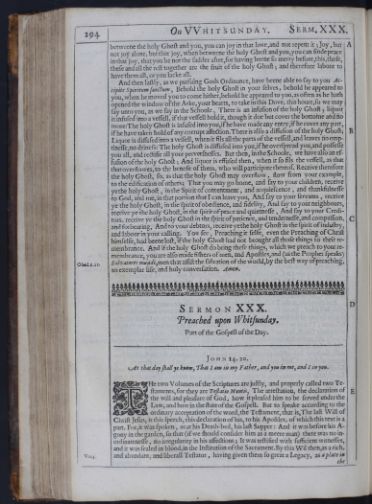 294
On VVhitsunday.
Serm. XXX.
betweene the holy Ghost and you, you can joy in that love, and not repent it; Joy, but
294
On VVhitsunday.
Serm. XXX.
betweene the holy Ghost and you, you can joy in that love, and not repent it; Joy, but
not joy alone, but that joy, when betweene the holy Ghost and you, you can finde peace
in that joy, that you be not the sadder after, for having beene so merry before, this, these,
these and all the rest together are the fruit of the holy Ghost; and therefore labour to
have them all, or you lacke all. And then lastly, as we pursuing Gods Ordinance, have beene able to say to you Ac-
cipite Spiritum sanctum, Behold the holy Ghost in your selves, behold he appeared to
you, when he moved you to come hither, behold he appeared to you, as often as he hath
opened the window of the Arke, your hearts, to take in this Dove, this houre, so we may
say unto you, as we say in the Schoole, There is an infusion of the holy Ghost; liquor
is infused into a vessell, if that vessell hold it, though it doe but cover the bottome and no
more: The holy Ghost is infused into you, if he have made any entry, if he cover any part,
if he have taken hold of any corrupt affection. There is also a diffusion of the holy Ghost;
Liquor is diffused into a vessell, when it fils all the parts of the vessell, and leaves no emp-
tinesse, no driness: The holy Ghost is diffused into you, if he overspread you, and possesse
you all, and rectifie all your perversnesses. But then, in the Schoole, we have also an ef-
fusion of the holy Ghost; And liquor is effused then, when it so fils the vessell, as that
that overflowes, to the benefit of them, who will participate thereof. Receive therefore
the holy Ghost, so, as that the holy Ghost may overflow, flow from your example,
to the edification of others; That you may go home, and say to your children, receive
ye the holy Ghost, in the Spirit of contentment, and acquiescence, and thankfulnesse
to God, and me, in that portion that I can leave you, And say to your servants, receive
ye the holy Ghost, in the spirit of obedience, and fidelity, And say to your neigh bours,
receive ye the holy Ghost, in the spirit of peace and quiemesse, And say to your Credi-
tors, receive ye the holy Ghost in the spirit of patience, and tendernesse, and compassion,
and for bearing, And to your debtors, receive ye the holy Ghost in the spirit of industry,
and labour in your calling. You see, Preaching it selfe, even the Preaching of Christ
himselfe, had beene lost, if the holy Ghost had not brought all those things to their re-
membrance. And if the holy Ghost do bring these things, which we preach to your re-
membrance, you are also made fishers of men, and Apostles, and (as the Prophet speaks)
Salvatores mundi,Obad. 1.21. men that assist the salvation of the world, by the best way of preaching,
an exemplar life, and holy convesation. Amen.
Sermon XXX.
Preached upon Whitsunday.
Part of the Gospell of the Day.
John 14. 20.
At that day shall ye know, That I am in my Father, and you in me, and I in you.
THeThe two Volumes of the Scriptures are justly, and properly called two Te-
staments, for they are Testatio Mentis, The attestation, the declaration of
the will and pleasure of God, how it pleased him to be served under the
Law, and how in the state of the Gospell. But to speake according to the
ordinary acceptation of the word, the Testament, that is, The last Will of
Christ Jesus, is this speech, this declaration of his, to his Apostles, of which this text is a
part. For, it was spoken, as at his Death-bed, his last Supper: And it was before his A-
gony in the garden, so that (if we should consider him as a meere man) there was no in-
ordinatenesse, no irregularity in his affection; It was testified with sufficient witnesses,
and it was sealed in blood, in the Institution of the Sacrament. By this Wil then, as a rich,
and abundant, Ver. 3. and liberall Testator, having given them so great a Legacy, as a place in the
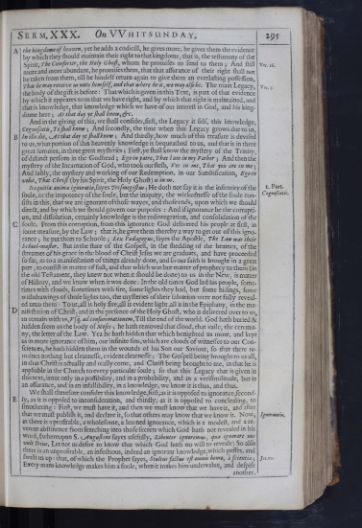 Serm. XXX.
On Whitsunday.
295
the kingdome of heaven, yet he adds a codicill, he gives more, he gives them the evidence
Serm. XXX.
On Whitsunday.
295
the kingdome of heaven, yet he adds a codicill, he gives more, he gives them the evidence
by which they should maintain their right to that kingdome, that is, the testimony of the
Spirit, The Comforter, the Holy Ghost, whom he promises to send to them;Ver. 16. And still
more and more abundant, he promises them, that that assurance of their right shall not
be taken from them, till he himself return again to give them an everlasting possession,
That he may receive us unto himself, and that where he is, we may also be. The main Legacy, Ver. 3.
the body of the gift is before: That which is given in this Text, is part of that evidence
by which it appeares to us that we have right, and by which that right is maintained, and
that is knowledge, that knowledge which we have of our interest in God, and his king-
dome here; At that day ye shall know, &c.
And in the giving of this, we shall consider, first, the Legacy it self, this knowledge,
Cognoscetis, Ye shall know; And secondly, the time when this Legacy grows due to us,
In illo die, At that day ye shall know; And thirdly, how much of this treasure is devised
to us, what portion of this heavenly knowledge is bequeathed to us, and that is in three
great summes, in three great mysteries; First, ye shall know the mystery of the Trinity,
of distinct persons in the Godhead; Ego in patre, That I am in my Father; And then the
mystery of the Incarnation of God, who took our flesh, Vos in me, That you are in me;
And lastly, the mystery and working of our Redemption, in our Sanctification, Ego in
vobis, That Christ (by his Spirit, the Holy Ghost) is in us.
Nequitia animæ ignoratio, sayes Trismegistus;1. Part.
Cognoscetis. He doth not say it is the infirmity of the
soule, or the impotency of the soule, but the iniquity, the wickednesse of the soule con-
sists in this, that we are ignorant of those wayes, and those ends, upon which we should
direct, and by which we should govern our purposes: And if ignorance be the corrupti-
on, and dissolution, certainly knowledge is the redintegration, and consolidation of the
soule. From this corruption, from this ignorance God delivered his people at first, in
some measure, by the Law; that is, he gave them thereby a way to get out of this igno-
rance; he put them to Schoole; Lex Pædagogus, sayes the Apostle, The Law was their
School-master. But in the state of the Gospell, in the shedding of the beames, of the
streames of his grace in the blood of Christ Jesus we are graduats, and have proceeded
so far, as to a manifestation of things already done, and so our faith is brought in a great
part, to consist in matter of fact, and that which was but matter of prophecy to them (in
the old Testament, they knew not when it should be done) to us in the New, is matter
of History, and we know when it was done: In the old times God led his people, some-
times with clouds, sometimes with fire, some lights they had, but some hidings, some
withdrawings of those lights too, the mysteries of their salvation were not fully reveal-
ed unto them: To us, all is holy fire, all is evident light, all is in the Epiphany, in the ma-
nifestation of Christ, and in the presence of the Holy Ghost, who is delivered over to us,
to remain with us, Vs ad consummationem, Till the end of the world. God hath buried &
hidden from us the body of Moses; he hath removed that cloud, that vaile, the ceremo-
ny, the letter of the Law. Yea he hath hidden that which benighted us more, and kept
us in more ignorance of him, our infinite sins, which are clouds of witnesses to our Con-
sciences, he hath hidden them in the wounds of his Son our Saviour, so that there re-
maines nothing but clearnesse, evident clearnesse; The Gospell being brought to us all,
in that Christ is actually and really come, and Christ being brought to me, in that he is
appliable in the Church to every particular soule; so that this Legacy that is given in
this text, is not only in a possibility, and in a probability, and in a verisimilitude, but in
an assurance, and in an infallibility, in a knowledge, we know it is thus, and thus.
We shall therefore consider this knowledge, first, as it is opposed to ignorance, second-
ly, as it is opposed to inconsideration, and thirdly, as it is opposed to conclealingconcealing, to
smothering: First, we must have it, and then we must know that we have it, and after
that we must publish it, and declare it, so that others may know that we know it. Now,
Ignorantia. as there is a profitable, a wholesome, a learned ignorance, which is a modest, and a re-
verent abstinence from searching into those secrets which God hath not revealed in his
word, (whereupon S. Augustine sayes usefully, Libenter ignoremus, quæ ignorare nos
vult Deus, Let not us desire to know that which God hath no will to reveale) So also
there is an unprofitable, an infectious, indeed an ignorant knowledge, which puffes, and
swels us up: that, of which the Prophet sayes, Stultus factus est omnis homo, à scientia;
Jer. 12. Every mans knowledge makes him a foole, when it makes him undervalue, and despise another.
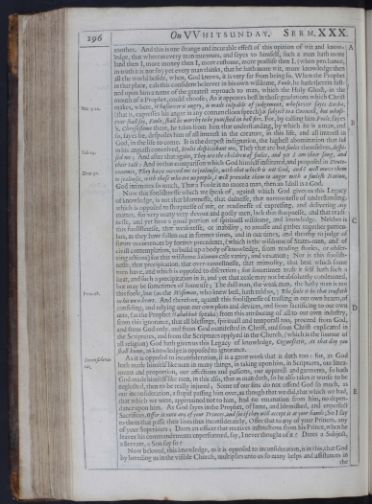 296
On VVWhitsunday.
Serm. XXX.
another. And this is one strange and incurable effect of this opinion of wit and know-
296
On VVWhitsunday.
Serm. XXX.
another. And this is one strange and incurable effect of this opinion of wit and know-ledge, that whereas every man murmurs, and sayes to himself, such a man hath more
land then I, more money then I, more custome, more practise then I, (when perchance,
in truth it is not so) yet every man thinks, that he hath more wit, more knowledge then
all the world beside, when, God knows, it is very far from being so. When the Prophet
in that place, cals this confident beleever in his own wisdome, Foole, he hath therein fast-
ned upon him a name of the greatest reproach to man, which the Holy Ghost, in the
mouth of a Prophet, could choose; As it appeares best in those gradations which Christ
Mat. 5.22. makes, where, Whosoever is angry, is made culpable of judgement, whosoever sayes Racha,
(that is, expresses his anger in any contumelious speech) is subject to a Councell, but whoso-
ever shall say, Foole, shall be worthy to be punished in hell fire. For, by calling him Foole, sayes
S. Chrysostome there, he takes from him that understanding, by which he is a man, and
so, sayes he, despoiles him of all interest in the creature, in this life, and all interest in
God, in the life to come. It is the deepest indignation, the highest abomination that Iob
Iob 19. in his anguish conceived, Stulti despiciebant me, They that are but fooles themselves, despi-
sed me; And after that again, They are the children of fooles, and yet I am their song, and
their talk: And in that comparison which God himself instituted, and proposed in Deute-
ronomie, Deut. 30. They have moved me to jealousie, with that which is not God, and I will move them
to jealousie, with those who are no people, I will provoke them to anger with a foolish Nation,
God intimates so much, That a Foole is no more a man, then an Idoll is a God.
Now this foolishnesse which we speak of, against which God gives us this Legacy
of knowledge, is not that bluntnesse, that dulnesse, that narrownesse of understanding,
which is opposed to sharpnesse of wit, or readinesse of expressing, and delivering any
matter, for very many very devout and godly men, lack that sharpnesse, and that readi-
nesse, and yet have a good portion of spirituall wisdome, and knowledge. Neither is
this foolishnesse, that weaknesse, or inability, to amasse and gather together particu-
lars, as they have fallen out in former times, and in our times, and thereby to judge of
future occurrences by former precedents, (which is the wisdome of States-men, and of
civill contemplation, to build up a body of knowledge, from reading stories, or obser-
ving actions) for this wisdome Solomon cals vanity, and vexation; Nor is this foolish-
nesse, that precipitation, that over-earnestnesse, that animosity, that heat which some
men have, and which is opposed to discretion; for sometimes zeale it self hath such a
heat, and such a precipitation in it, and yet that zeale may not be absolutely condemned,
but may be sometimes of some use; The dull man, the weak man, the hasty man is not
Prov. 28. this foole, but (as the Wiseman, who knew best, hath told us,) The foole is he that trusteth
in his own heart. And therefore, against this foolishnesse of trusting in our own hearts, of
confiding, and relying upon our own plots and devices, and from sacrificing to our own
nets, (as the Prophet Habakkuk speaks) from this attributing of all to our own industry,
from this ignorance, that all blessings, spirituall and temporall too, proceed from God,
and from God only, and from God manifested in Christ, and from Christ explicated in
the Scriptures, and from the Scriptures applyed in the Church, (which is the summe of
all religion) God hath given us this Legacy of knowledge, Cognoscetis, At that day you
shall know, as knowledge is opposed to ignorance.
Inconsidera-
tio. As it is opposed to inconsideration, it is a great work that it doth too: for, as God
hath made himself like man in many things, in taking upon him, in Scriptures, our linea-
ments and proportion, our affections and passions, our apparell and garments, so hath
God made himself like man, in this also, that as man doth, so he also takes it worse to be
neglected, then to be really injured; Some of our sins do not offend God so much, as
our inconsideration, a stupid passing him over, as though that we did, that which we had,
that which we were, appertained not to him, had no emanation from him, no depen-
dance upon him. As God sayes in the Prophet, of lame, and blemished, and unperfect
Sacrifices, Offer it unto any of your Princes, and see if they will accept it at your hands; So I say
to them that passe their lives thus inconsiderately, Offer that to any of your Princes, any
of your Superiours; Dares an officer that receives instructions from his Prince, when he
leaves his commandements unperformed, say, I never thought of it? Dares a Subject,
a Servant, a Son say so?
Now beloved, this knowledge, as it is opposed to inconsideration, is in this, that God
by breeding us in the visible Church, multiplies unto us so many helps and assistances in the
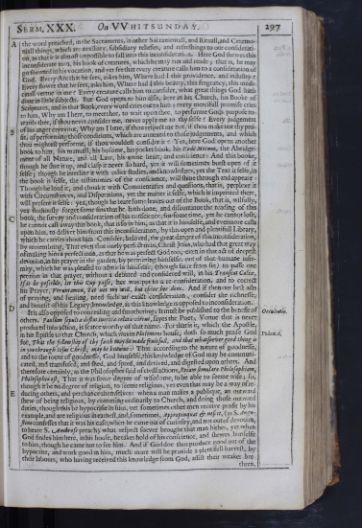 Serm. XXX.
On VVWhitsunday.
297
the word preached, in the Sacraments, in other Sacramentall, and Rituall, and Ceremo-
Serm. XXX.
On VVWhitsunday.
297
the word preached, in the Sacraments, in other Sacramentall, and Rituall, and Ceremo-niall things, which are auxiliary, subsidiary reliefes, and refreshings to our considerati-
on, as that it is almost impossible to fall into this inconsideration. Here God shewes this
inconsiderate man, his book of creatures, which he may run and reade; that is, he may
go forward in his vocation, and yet see that every creature calls him to a consideration of
God. Every Ant that he sees, askes him, Where had I this providence, and industry?
Every flowre that he sees, asks him, Where had I this beauty, this fragrancy, this medi-
cinall vertue in me? Every creature calls him to consider, what great things God hath
done in little subjects. But God opens to him also, here in his Church, his Booke of
Scriptures, and in that Book, every word cries out to him; every mercifull promise cries
to him, Why am I here, to meet thee, to wait upon thee, to performe Gods purpose to-
wards thee, if thou never consider me, never apply me to thy selfe? Every judgement
of his anger cryes out, Why am I here, if thou respect me not. if thou make not thy pro-
fit, of performing those conditions, which are annexed to those judgements, and which
thou mightest performe, if thou wouldest consider it? Yea, here God opens another
book to him, his manuall, his bosome, his pocket book, his Vade Mecum, the Abridge-
ment of all Nature, and all Law, his owne heart, and conscience: And this booke,
though he shut it up, and clasp it never so hard, yet it will sometimes burst open of it
selfe; though he interline it with other studies, and knowledges, yet the Text it selfe, in
the book it selfe, the testimonies of the conscience, will shine through and appeare:
Though he load it, and choak it with Commentaries and questions, that is, perplexe it
with Circumstances, and Disputations, yet the matter it selfe, which is imprinted there,
will present it selfe: yea, though he teare some leaves out of the Book, that is, wilfully,
yea studiously forget some sins that he hath done, and discontinue the reading of this
book, the survay and consideration of his conscience, for some time, yet he cannot lose,
he cannot cast away this book, that is so in him, as that it is himselfe, and evermore calls
upon him, to deliver him from this inconsideration, by this open and plentifull Library,
which he carries about him. Consider, beloved, the great danger of this inconsideration,
by remembring, That even that onely perfect man, Christ Jesus, who had that great way
of making him a perfect man, as that he was perfect God too, even in that act of deepest
devotion, in his prayer in the garden, by permitting himselfe, out of that humane infir-
mity, which he was pleased to admit in himselfe, (though farre from sin) to passe one
petition in that prayer, without a debated and considered will, in his Transeat Calix,
If it be possible, let this Cup passe, hee was put to a re-consideration, and to correct
his Prayer, Veruntamen, Yet not my will, but thine bee done. And if then our best acts
of praying, and hearing, need such an exact consideration, consider the richnesse,
and benefit of this Legacy, knowledge, as this knowledge is opposed to inconsideration. It is also opposed to concealing and smothering;Occultatio. It must be published to the benefit of
others. Paulùm sepultæ distat inertiæ celata virtus, sayes the Poet; Vertue that is never
produced into action, is scarce worthy of that name. For that is it, which the Apostle,
in his Epistle to that Church, which was in Philemons house, Philem. 6. doth so much praise God
for, That the fellowship of thy faith may be made fruitfull, and that whatsoever good thing is
in you through Iesus Christ, may be knowne: That according to the nature of goodnesse,
and to the roote of goodnesse, God himselfe, this knowledge of God may be communi-
cated, and transfused, and shed, and spred, and derived, and digested upon others. And
therefore certainly, as the Philosopher said of civill actions, Etiam simulare Philosophiam,
Philosophia est, That it was some degree of wisedome, to be able to seeme wise; so,
though it be no degree of religion, to seeme religious, yet even that may be a way of re-
ducing others, and perchance themselves: when a man makes a publique, an outward
shew of being religious, by comming ordinarily to Church, and doing those outward
duties, though this be hypocrisie in him, yet sometimes other men receive profit by his
example, and are religious in earnest, and, sometimes, Appropinquat & nescit, (as S. Augu-
stine confesses that it was his case, when he came out of curiosity, and not out of devotion,
to heare S. Ambrose preach) what respect soever brought that man hither, yet when
God findes him here, in his house, he takes hold of his conscience, and shewes himselfe
to him, though he came not to see him. And if God doe thus produce good out of the
hypocrite, and work good in him, much more will he provide a plentifull harvest, by
their labours, who having received this knowledge from God, assist their weaker bre-
thren,
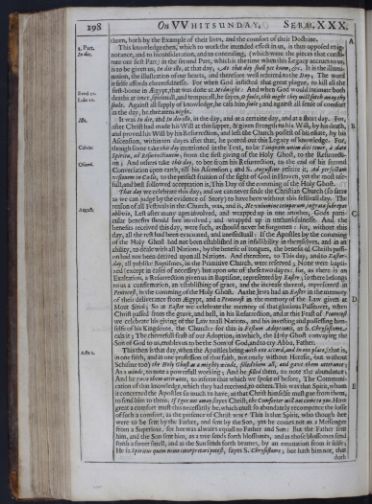 298
On VVWhitsunday.
Serm. XXX.
thren, both by the Example of their lives, and the comfort of their Doctrine.
This knowledge then, 2. Part.
298
On VVWhitsunday.
Serm. XXX.
thren, both by the Example of their lives, and the comfort of their Doctrine.
This knowledge then, 2. Part. In die. which to work the intended effect in us, is thus opposed to ig-
norance, and to inconsideration, and to concealing, (which were the pieces that consti-
tute our first Part) in the second Part, which is the time when this Legacy accrues to us,
is to be given us, In die illo, at that day, At that day shall yee know, &c. It is the illumi-
nation, the illustration of our hearts, and therefore well referred to the Day; The word
it selfe affords cheerefulnesse. For when God inflicted that great plague, to kill all the
first-borne in Ægypt, Exod. 12. that was done at Midnight: And when God would intimate both
deaths at once, spirituall, and temporall, he sayes, Luke 20. O foole, this night they will fetch away thy
soule. Against all supply of knowledge, he cals him foole; and against all sense of comfort
in the day, he threatens night.
It was In die, Illo. and In die illo, in the day, and at a certaine day, and at a short day. For,
after Christ had made his Will at this supper, & given strength to his Will, by his death,
and proved his Will by his Resurrection, and left the Church possest of his estate, by his
Ascension, within ten dayes after that, he poured out this Legacy of knowledge. For,
though some take this day mentioned in the Text, Calvin. to be Tanqnam unius diei tenor, à dato
Spiritu, ad Resurrectionem; from the first giving of the Holy Ghost, to the Resurrecti-
on; And others take this day,Osiand. to bee from his Resurrection, to the end of his second
Conversation upon earth, till his Ascension; and S. Augustine referre it, Ad perfectam
visionem in Cœlis, to the perfect fruition of the sight of God in Heaven, yet the most use-
full, and best followed acceptation is, This Day of the comming of the Holy Ghost.
That day we celebrate this day; and we can never finde the Christian Church (so farre
as we can judge by the evidence of Story) to have been without this festivall day. The
reason of all Festivals in the Church, was, and is, Ne volumine temporum, ingrata subrepat
oblivio, August. Lest after many ages involved, and wrapped up in one another, Gods parti-
cular benefits should bee involved, and wrapped up in unthankfulnesse. And the
benefits received this day, were such, as should never be forgotten: for, without this
day, all the rest had been evacuated, and uneffectuall: If the Apostles by the comming
of the Holy Ghost had not been established in an infallibility in themselves, and in an
ability, to deale with all Nations, by the benefit of tongues, the benefit of Christs passi-
on had not been derived upon all Nations. And therefore, to This day, and to Easter-
day, all publike Baptismes, in the Primitive Church, were reserved; None were bapti-
zed (except in cases of necessity) but upon one of these two dayes: for, as there is an
Exaltation, a Resurrection given us in Baptisme, represented by Easter; so there belongs
to us a confirmation, an establishing of grace, and the increase thereof, represented in
Pentecost, in the comming of the Holy Ghost. As the Jews had an Easter in the memory
of their deliverance from Ægypt, and a Pentecost in the memory of the Law given at
Mout Sinai; So at Easter we celebrate the memory of that glorious Passeover, when
Christ passed from the grave, and hell, in his Resurrection, and at this Feast of Pentecost
we celebrate his giving of the Law to all Nations, and his investing and possessing him-
selfe of his Kingdome, the Church: for this is Festum Adoptionis, as S. Chrysostome
cals it; The cheerefull feast of our Adoption, in which, the Holy Ghost convaying the
Son of God to us, enables us to be the Sons of God, and to cry Abba, Father.
This then is that day, Acts 2. when the Apostles being with one accord, and in one place, (that is,
in one faith, and in one profession of that faith, not onely without Heresie, but without
Schisme too) the Holy Ghost as a mighty winde, filled them all, and gave them utterance;
As a winde, to note a powerfull working; And he filled them, to note the abundance;
And he gave them utterance, to inferre that which we spoke of before, The Communi-
cation of that knowledge, which they had received, to others. This was that Spirit, whom
it concerned the Apostles so much to have, as that Christ himselfe must goe from them,
to send him to them; If I goe not away, sayes Christ, the Comforter will not come to you. How
great a comfort must this necessarily be, which must so abundantly recompence the losse
of such a comfort; as the presence of Christ was? This is that Spirit, who though hee
were to be sent by the Father, and sent by the Son, yet he comes not as a Messenger
from a Superiour, for hee was alwaies equall to Father and Son: But the Father sent
him, and the Son sent him, as a tree sends forth blossomes, and as those blossomes send
forth a sweet smell, and as the Sun sends forth beames, by an emanation from it selfe;
He is Spiritus quem nemo interpretari potest, sayes S. Chrysostome; hee hath him not, that doth
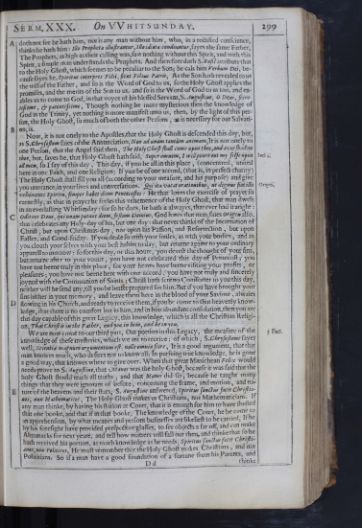 Serm. XXX.
On VVWhitsunday.
299
doth not see he hath him, nor is any man without him, who, in a rectified conscience,
Serm. XXX.
On VVWhitsunday.
299
doth not see he hath him, nor is any man without him, who, in a rectified conscience,
thinks he hath him: Illo Prophetæ illustrantur, Illo idiotæ condiuntur, sayes the same Father,
The Prophets, as high as their calling was, saw nothing without this Spirit, and with this
Spirit, a simple man understands the Prophets. And therefore doth S. Basil attribute that
to the Holy Ghost, which seemes to be peculiar to the Son; he cals him Verbum Dei, be-
cause sayes he, Spiritus interpres Filii, sicut Filius Patris, As the Son hath revealed to us
the will of the Father, and so is the Word of God to us, so the Holy Ghost applies the
promises, and the merits of the Son to us, and so is the Word of God to us too, and en-
ables us to come to God, in that voyce of his blessed Servant, S. Augustine, O Deus, secre-
tissime, & patentissime, Though nothing be more mysterious then the knowledge of
God in the Trinity, yet nothing is more manifest unto us, then, by the light of this per-
son, the Holy Ghost, so much of both the other Persons, as is necessary for our Salvati-
on, is.
Now, it is not onely to the Apostles, that the Holy Ghost is descended this day, but,
as S. Chrysostom saies of the Annunciation, Non ad unam tantùm animam, It is not onely to
one Person, that the Angel said then, The Holy Ghost shall come upon thee, and overshadow
thee, but, sayes he, that Holy Ghost hath said, Super omnem, Ioel 2. I will poure out my selfe upon
all men, so I say of this day, This day, if you be all in this place, (concentred, united
here in one Faith, and one Religion) If you be of one accord, (that is, in perfect charity)
The Holy Ghost shall fill you all (according to your measure, and his purpose) and give
you utterance, in your lives and conversations. Qui ita vacat orationibus, Origen. ut dignus fiat illo
vehementi Spiritu, semper habet diem Pentecostes: He that-loves the exercise of prayer so
earnestly, as that in prayer he feeles this vehemence of the Holy Ghost, that man dwels
in an everlasting Whitsunday: for so he does, he hath it alwayes, that ever had it aright:
Odit eos Deus, qui unam putant diem, festum Domini; God hates that man, saies Origen also,
that celebrates any Holy-day of his, but one day: that never thinks of the Incarnation of
Christ, but upon Christmas-day, nor upon his Passion, and Resurrection, but upon
Easter, and Good-friday. If you deale so with your soules, as with your bodies, and as
you cloath your selves with your best habits to day, but returne againe to your ordinary
apparell to morrow: so for this day, or this houre, you devest the thought of your sins,
but returne after to your vomit, you have not celebrated this day of Pentecost; you
have not beene truly in this place, for your hearts have beene visiting your profits, or
pleasures; you have not beene here with one accord, you have not truly and sincerely
joyned with the Communion of Saints; Christ hath sent no Comforter to you this day,
neither will he send any, till you be better prepared for him. But if you have brought your
sins hither in your memory, and leave them here in the blood of your Saviour, alwaies
flowing in his Church, and ready to receive them, if you be come to that heavenly know-
ledge, that there is no comfort but in him, and in him abundant consolation, then you are
this day capable of this great Legacy, this knowledge, which is all the Christian Religi-
on, That Christ is in the Father, and you in him, and he in you. We are now come to our third part, Our portion in this Legacy, 3 Part. the measure of the
knowledge of these mysteries, which we are to receive: of which, S. Chrysostome sayes
well, Scientiæ magnum argumentum est, nolle omnia scire, It is a good argument, that that
man knowes much, who desires not to know all; In pursuing true knowledge, he is gone
a good way, that knowes where to give over. When that great Manichean Felix would
needs prove to S. Augustine, that Manes was the holy Ghost, because it was said that the
holy Ghost should teach all truths, and that Manes did so, because he taught many
things that they were ignorant of before, concerning the frame, and motion, and na-
ture of the heavens and their stars, S. Augustine answered, Spiritus sanctus facit Christia-
nos, non Mathematicos, The Holy Ghost makes us Christians, not Mathematicians. If
any man thinke, by having his station at Court, that it is enough for him to have studied
that one booke, and that if in that booke, The knowledge of the Court, he be come to
an apprehension, by what meanes and persons businesses are likeliest to be carried, If he
by his foresight have provided perspective glasses, to see objects a far off, and can make
Almanacks for next yeare, and tell how matters will fall out then, and thinke that so he
hath received his portion, as much knowledge as he needs, Spiritus sanctus facit Christi-
anos, non Politicos, He must remember that the Holy Ghost makes Christians, and not
Politians. So if a man have a good foundation of a fortune from his Parents, and Dd thinke
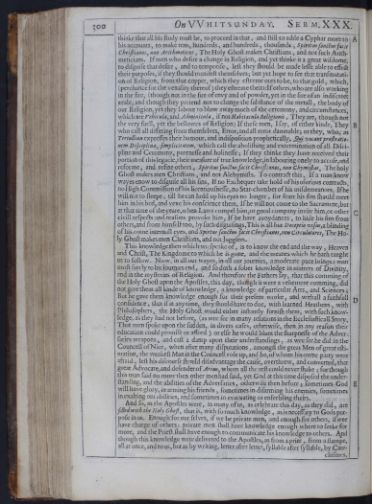 300
On VVWhitsunday.
Serm. XXX.
thinke that all his study must be, to proceed in that, and still to adde a Cyphar more to
300
On VVWhitsunday.
Serm. XXX.
thinke that all his study must be, to proceed in that, and still to adde a Cyphar more to
his accounts, to make tens, hundreds, and hundreds, thousands, Spiritus sanctus facit
Christianos, non Arithmeticos, The Holy Ghost makes Christians, and not such Arith-
meticians. If men who desire a change in Religion, and yet thinke it a great wisdome,
to disguise that desire, and to temporise, lest they should be made lesse able to effect
their purposes, if they should manifest themselves; but yet hope to see that transmutati-
on of Religion, from that copper, which they esteeme ours to be, to that gold, which,
(perchance for the venality thereof) they esteeme theirs: If others, who are also working
in the fire, (though not in the fire of envy and of powder, yet in the fire of an indiscreet
zeale, and though they pretend not to change the substance of the metall, the body of
our Religion, yet they labour to blow away much of the ceremony, and circumstances,
which are Vehicula, and Adminicula, if not Habitacula Religionis, They are, though not
the very fuell, yet the bellowes of Religion) If these men, I say, of either kinde, They
who call all differing from themselves, Error, and all error damnable; or they, who, as
Tertullian expresses their humour, and indisposition prophetically, Qui vocant prostratio-
nem Disciplinæ, simplicitatem, which call the abolishing and extermination of all Disci-
pline and Ceremony, purenesse and holinesse; If they thinke they have received their
portion of this legacie, their measure of true knowledge, in labouring onely to accuse, and
reforme, and refine others, Spiritus sanctus facit Christianos, non Chymistas, The holy
Ghost makes men Christians, and not Alchymists. To contract this, If a man know
wayes enow to disguise all his sins, If no Exchequer take hold of his usurious contracts,
no High Commission of his licentiousnesse, no Star-chamber of his misdemeanors, If he
will not to sleepe, till he can hold up his eyes no longer, for feare his sins should meet
him in his bed, and vexe his conscience there, If he will not come to the Sacrament, but
at that time of the yeare, when Laws compel him, or good company invite him, or other
civill respects and reasons provoke him, If he have avoydances, to hide his sins from
others, and from himself too, by such disguisings, This is all but Deceptio visus, a blinding
of his owne internall eyes, and SpirtusSpiritus sanctus facit Christianos, non Circulatores, The Ho-
ly Ghost makes men Christians, and not Jugglers.
This knowledge then which we speake of, is to know the end and the way, Heaven
and Christ, The Kingdome to which he is gone, and the meanes which he hath taught
us to follow. Now, in all our wayes, in all our journies, a moderate pace brings a man
most surely to his journies end, and so doth a sober knowledge in matters of Divinity,
and in the mysteries of Religion. And therefore the Fathers say, that this comming of
the Holy Ghost upon the Apostles, this day, though it were a vehement comming, did
not give them all kinde of knowledge, a knowledge of particular Arts, and Sciences;
But he gave them knowledge enough for their present worke, and withall a faithfull
confidence, that if at any time, they should have to doe, with learned Heathens, with
Philosophers, the Holy Ghost would either instantly furnish them, with such know-
ledge, as they had not before, (as wee see in many relations in the Ecclesiasticall Story,
That men spoke upon the sudden, in divers cases, otherwise, then in any reason their
education could promise or afford) or else he would blunt the sharpnesse of the Adver-
saries weapons, and cast a damp upon their understandings, as wee see he did in the
Councell of Nice, when after many disputations, amongst the great Men of great esti-
mation, the weakest Man in the Councell rose up, and he, of whom his owne party were
afraid, lest his discourse should disadvantage the cause, overthrew, and converted, that
great Advocate, and defender of Arius, whom all the rest could never shake; for though
this man said no more then other men had said, yet God at this time disposed the under-
standing, and the abilities of the Adversaries, otherwise then before; sometimes God
will have glory, in arming his friends, sometimes in disarming his enemies, sometimes
in exalting our abilities, and sometimes in evacuating or enfeebling theirs.
And so, as the Apostles were, as many of us, as celebrate this day, as they did, are
filled with the Holy Ghost, that is, with so much knowledge, as is necessary to Gods pur-
pose in us. Enough for our selves, if we be private men, and enough for others, if wee
have charge of others: private men shall have knowledge enough where to seeke for
more, and the Priest shall have enough to communicate his knowledge to others. And
though this knowledge were delivered to the Apostles, as from a print, from a stampe,
all at once, and to us, but as by writing, letter after letter, syllable after syllable, by Cate-
chismes,
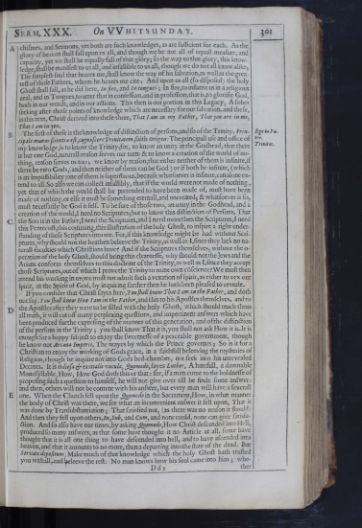 Serm. XXX.
On VVWhitsunday.
301
chismes, and Sermons, yet both are such knowledges, as are sufficient for each. As the
Serm. XXX.
On VVWhitsunday.
301
chismes, and Sermons, yet both are such knowledges, as are sufficient for each. As the
glory of heaven shall fall upon us all, and though we be not all of equall measure, and
capacity, yet we shall be equally full of that glory; so the way to that glory, this know-
ledge, shall be manifest to us all, and infallible to us all, though we do not all know alike;
The simplest soul that heares me, shall know the way of his salvation, as well as the grea-
test of those Fathers, whom he heares me cite; And upon us all (so disposed) the holy
Ghost shall fall, as he did here, in fire, and In tongues; In fire, to inflame us in a religious
zeal, and in Tongues, to utter that in confession, and in profession, that is, to glorifie God,
both in our words, and in our actions. This then is our portion in this Legacy, A sober
seeking after those points of knowledge which are necessary for our salvation, and these,
in this text, Christ derived into these three, That I am in my Father, That you are in me,
That I am in you.
The first of these is the knowledge of distinction of persons, and so of the Trinity.Ego in Pat-
tre. Trinitas. Prin-
cipale munus scientiæ est, cognoscere Trinitatem, saith Origen: The principall use and office of
my knowledge, is to know the Trinity; for, to know an unity in the Godhead, that there
is but one God, naturall reason serves our turn: & to know a creation of the world of no-
thing, reason serves us too; we know by reason, that either neither of them is infinite, if
there be two Gods, (and then neither of them can be God) or if both be infinite, (which
is an impossibility) one of them is superfluous, because whatsoever is infinite, can alone ex-
tend to all. So also we can collect infallibly, that if the world were not made of nothing,
yet that of which the world shall be pretended to have been made of, must have been
made of nothing, or else it must be something eternall, and untreated; & whatsoever is so,
must necessarily be God it self. To be sure of those two, an unity in the Godhead, and a
creation of the world, I need no Scriptures; but to know this distinction of Persons, That
the Son is in the Father, I need the Scriptures, and I need more then the Scriptures, I need
this Pentecost, this comming, this illustration of the holy Ghost, to inspire a right under-
standing of these Scriptures into me. For, if this knowledge might be had without Scri-
ptures, why should not the heathen beleeve the Trinity, as well as I, since they lack no na-
turall faculties which Christians have? And if the Scriptures themselves, without the o-
peration of the holy Ghost, should bring this clearnesse, why should not the Jews and the
Arians conform themselves to this doctrine of the Trinity, as well as I, since they accept
those Scriptures, out of which I prove the Trinity to mine own cōscienceconscience? We must then
attend his working in us; we must not admit such a vexation of spirit, as either to vex our
spirit, or the Spirit of God; by inquiring farther then he hath been pleased to reveale.
If you consider that Christ sayes here, You shall know That I am in the Father, and doth
not say, You shall know How I am in the Father, and this to his Apostles themselves, and to
the Apostles after they were to be filled with the holy Ghost, which should teach them
all truth, it will out off many perplexing questions, and impertinent answers which have
been produced for the expressing of the manner of this generation, and of the distinction
of the persons in the Trinity; you shall know That it is, you shall not ask How it is. It is
enough for a happy subject to enjoy the sweetnesse of a peaceable government, though
he know not Arcana Imperii, The wayes by which the Prince governes; So is it for a
Christian to enjoy the working of Gods grace, in a faithfull beleeving the mysteries of
Religion, though he inquire not into Gods bed-chamber, nor seek into his unrevealed
Decrees. It is Odiosa & exitialis vocula, Quomodo, sayes Luther, A hatefull, a damnable
Monosyllable, How, How God doth this or that: for, if a man come to the boldnesse of
proposing such a question to himself, he will not give over till he finde some answer:
and then, others will not be content with his answer, but every man will have a severall
one. When the Church fell upon the Quomodo in the Sacrament, How, in what manner
the body of Christ was there, we see what an inconvenient answer it fell upon, That it
was done by Transubstantiation; That satisfied not, (as there was no reason it should)
And then they fell upon others, In, Sub, and Cum, and none could, none can give satisfa-
ction. And so also have our times, by asking Quomodo, How Christ descended into Hell,
produced so many answers, as that some have thought it no Article at all, some have
thought that it is all one thing to have descended into hell, and to have ascended into
heaven, and that it amounts to no more, then a departing into the state of the dead. But
Servate depositum, Make much of that knowledge which the holy Ghost hath trusted
you withall, and beleeve the rest. No man knows how his soul came into him; whe-
Dd2 ther
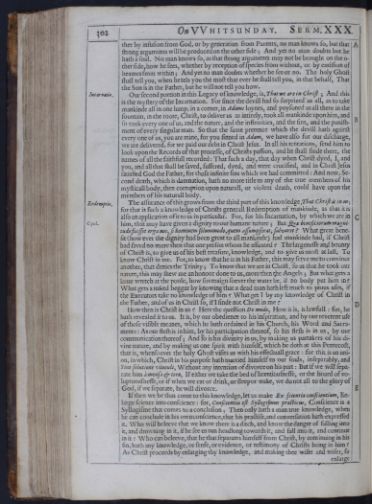 302
On VVWhitsunday.
Serm. XXX.
ther by infusion from God, or by generation from Parents, no man knows so, but that
302
On VVWhitsunday.
Serm. XXX.
ther by infusion from God, or by generation from Parents, no man knows so, but that
strong arguments will be produced on the other side; And yet no man doubts but he
hath a soul. No man knows so, as that strong arguments may not be brought on the o-
ther side, how he sees, whether by reception of species from without, or by emission of
beames from within; And yet no man doubts whether he see or no. The holy Ghost
shall tell you, when he tels you the most that ever he shall tell you, in that behalf, That
the Son is in the Father, but he will not tell you how.
Our second portion in this Legacy of knowledge, Incarnatio. is, That we are in Christ; And this
is the mystery of the Incarnation. For since the devill had so surprized us all, as to take
mankinde all in one lump, in a corner, in Adams loynes, and poysoned us all there in the
fountain, in the roote, Christ, to deliver us as intirely, took all mankinde upon him, and
so took every one of us, and the nature, and the infirmities, and the sins, and the punish-
ment of every singular man. So that the same pretence which the devill hath against
every one of us, you are mine, for you sinned in Adam, we have also for our discharge,
we are delivered, for we paid our debt in Christ Jesus. In all his tentations, send him to
look upon the Records of that processe, of Christs passion, and he shall finde there, the
names of all the faithfull recorded: That such a day, that day when Christ dyed, I, and
you, and all that shall be saved, suffered, dyed, and were crucified, and in Christ Jesus
satisfied God the Father, for those infinite sins which we had committed: And now, Se-
cond death, which is damnation, hath no more title to any of the true members of his
mysticall body, then corruption upon naturall, or violent death, could have upon the
members of his naturall body.
The assurance of this grows from the third part of this knowledge, Redemptio. That Christ is in us;
for that is such a knowledge of Christs generall Redemption of mankinde, as that it is
also an application of it to us in particular. For, for his Incarnation, by which we are in
him, Cyril. that may have given a dignity to our humane nature; But Quæ beneficiorum magni-
tudo fuisset erga nos, si hominem solummodo, quem assumpserat, salvaret? What great bene-
fit (how ever the dignity had been great to all mankinde) had mankinde had, if Christ
had saved no more then that one person whom he assumed? The largenesse and bounty
of Christ is, to give us of his best treasure, knowledge, and to give us most at last, To
know Christ in me. For, to know that he is in his Father, this may serve me to convince
another, that denies the Trinity; To know that we are in Christ, so as that he took our
nature, this may shew me an honour done to us, more then the Angels; But what gets a
lame wretch at the poole, how soveraign soever the water be, if no body put him in?
What gets a naked beggar by knowing that a dead man hath left much to pious uses, if
the Executors take no knowledge of him? What get I by my knowledge of Christ in
the Father, and of us in Christ so, if I finde not Christ in me?
How then is Christ in us? Here the question De modo, How it is, is lawfull: for, he
hath revealed it to us. It is, by our obedience to his inspiration, and by our reverent use
of those visible meanes, which he hath ordained in his Church, his Word and Sacra-
ments: As our flesh is in him, by his participation thereof, so his flesh is in us, by our
communication thereof; And so is his divinity in us, by making us partakers of his di-
vine nature, and by making us one spirit with himself, which he doth at this Pentecost,
that is, whensoever the holy Ghost visits us with his effectuall grace: for this is an uni-
on, in which, Christ in his purpose hath married himself to our souls, inseparably, and
Sine solutione vinculi, Without any intention of divorce on his part: But if we will sepa-
rate him à mensa & toro, If either we take the bed of licentiousnesse, or the board of vo-
luptuousnesse, or if when we eat or drink, or sleep or wake, we do not all to the glory of
God, if we separate, he will divorce.
If then we be thus come to this knowledge, let us make Ex scientia conscientiam, En-
large science into conscience: for, Conscientia est Syllogismus practicus, Conscience is a
Syllogisme that comes to a conclusion; Then only hath a man true knowledge, when
he can conclude in his own conscience, that his practise, and conversation hath expressed
it. Who will beleeve that we know there is a ditch, and know the danger of falling into
it, and drowning in it, if he see us run headlong towards it, and fall into it, and continue
in it? Who can beleeve, that he that separates himself from Christ, by continuing in his
sin, hath any knowledge, or sense, or evidence, or testimony of Christs being in him?
As Christ proceeds by enlarging thy knowledge, and making thee wiser and wiser, so enlarge
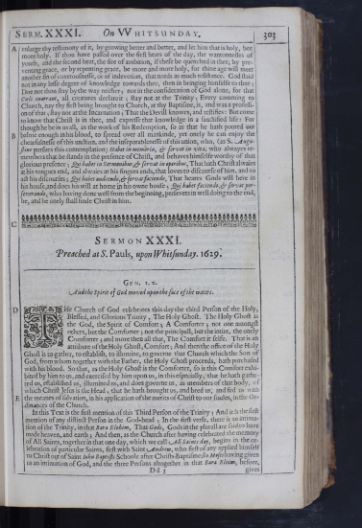 Serm. XXXI.
On Whitsunday.
303
enlarge thy testimony of it, by growing better and better, and let him that is holy, bee
Serm. XXXI.
On Whitsunday.
303
enlarge thy testimony of it, by growing better and better, and let him that is holy, bee
more holy. If thou have passed over the first heats of the day, the wantonnesses of
youth, and the second heat, the fire of ambition, if these be quenched in thee, by pre-
venting grace, or by repenting grace, be more and more holy, for thine age will meet
another sin of covetousnesse, or of indevotion, that needs as much resistance. God staid
not in any lesse degree of knowledge towards thee, then in bringing himselfe to thee;
Doe not thou stay by the way neither; not in the consideration of God alone, for that
Cœli enarrant, all creatures declare it; stay not at the Trinity; Every comming to
Church, nay thy first being brought to Church, at thy Baptisme, is, and was a professi-
on of that; stay not at the Incarnation; That the Devill knowes, and testifies: But come
to know that Christ is in thee, and expresse that knowledge in a sanctified life: For
though he be in us all, in the work of his Redemption, so as that he hath poured out
balme enough in his blood, to spread over all mankinde, yet onely he can enjoy the
chearfulnesse of this unction, and the inseparablenesse of this union, who, (as S. Augu-
stine pursues this contemplation) Habet in memoria, & servat in vita, who alwayes re-
members that he stands in the presence of Christ, and behaves himselfe worthy of that
glorious presence; Qui habet in Sermonibus, & servat in operibus, That hath Christ alwaies
at his tongues end, and alwaies at his fingers ends, that loves to discourse of him, and to
act his discourses; Que habet audiendo, & servat faciendo, That heares Gods will here in
his house, and does his will at home in his owne house; Qui habet faciendo, & servat per-
severando, who having done well from the beginning, persevers in well doing to the end,
he, and he onely shall finde Christ in him.
Sermon XXXI.
Preached at S. Pauls, upon Whitsunday. 1629.
Gen. 1.2.
And the Spirit of God moved upon the face of the waters.
THeThe Church of God celebrates this day the third Person of the Holy,
Blessed, and Glorious Trinity, The Holy Ghost. The Holy Ghost is
the God, the Spirit of Comfort; A Comforter; not one amongst
others, but the Comforter; not the principall, but the intire, the onely
Comforter; and more then all that, The Comfort it selfe. That is an
attribute of the Holy Ghost, Comfort; And then the office of the Holy
Ghost is to gather, to establish, to illumine, to governe that Church which the Son of
God, from whom together with the Father, the Holy Ghost proceeds, hath purchased
with his blood. So that, as the Holy Ghost is the Comforter, so is this Comfort exhi-
bited by him to us, and exercised by him upon us, in this especially, that he hath gathe-
red us, established us, illumined us, and does governe us, as members of that body, of
which Christ Jesus is the Head; that he hath brought us, and bred us, and fed us with
the meanes of salvation, in his application of the merits of Christ to our soules, in the Or-
dinances of the Church.
In this Text is the first mention of this Third Person of the Trinity; And it is the first
mention of any distinct Person in the God-head; In the first verse, there is an intima-
tion of the Trinity, in that Bara Elohim, That Gods, Gods in the plurall are said to have
made heaven, and earth; And then, as the Church after having celebrated the memory
of All Saints, together in that one day, which we call All Saints day, begins in the ce-
lebration of particular Saints, first with Saint Andrew, who first of any applied himself
to Christ out of Saint Iohn Baptists Schoole after Christs Baptisme; so Moses having given
us an intimation of God, and the three Persons altogether in that Bara Eloim, before, Dd3 gives
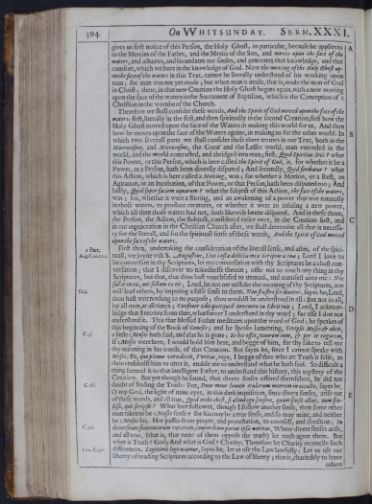 304
On Whitsunday.
Serm. XXXI.
gives us first notice of this Person, the Holy Ghost, in particular, because he applies to
304
On Whitsunday.
Serm. XXXI.
gives us first notice of this Person, the Holy Ghost, in particular, because he applies to
us the Mercies of the Father, and the Merits of the Son, and moves upon the face of the
waters, and actuates, and fecundates our soules, and generates that knowledge, and that
comfort, which we have in the knowledge of God. Now the moving of the Holy Ghost up-
on the face of the waters in this Text, cannot be literally understood of his working upon
man; for man was not yet made; but when man is made, that is, made the man of God
in Christ; there, in that new Creation the Holy Ghost begins again, with a new moving
upon the face of the waters in the Sacrament of Baptisme, which is the Conception of a
Christian in the wombe of the Church.
Therefore we shall consider these words, And the Spirit of God moved upon the face of the
waters; first, literally in the first, and then spiritually in the second Creation; first how the
Holy Ghost moved upon the face of the Waters in making this world for us, And then
how he moves upon the face of the Waters againe, in making us for the other world. In
which two severall parts we shall consider these three termes in our Text, both in the
Macrocosme, and Microcosme, the Great and the Lesser world, man extended in the
world, and the world contracted, and abridged into man; first, Quid Spiritus Dei? what
this Power, or this Person, which is here called the Spirit of God, is, for whether it be a
Power, or a Person, hath been diversly disputed; And secondly, Quid ferebatur? what
this Action, which is here called a Moving, was; for whether a Motion, or a Rest, an
Agitation, or an Incubation, of that Power, or that Person, hath been disputed too; And
lastly, Quid super faciem aquarum? what the subject of this Action, the face of the waters,
was; for, whether it were a stirring, and an awakening of a power that was naturally
in those waters, to produce creatures, or whether it were an infusing a new power,
which till then those waters had not, hath likewise beene disputed. And in these three,
the Person, the Action, the Subject, considered twice over, in the Creation first, and
in our regeneration in the Christian Church after, we shall determine all that is necessa-
ry for the literall, and for the spirituall sense of these words, And the Spirit of God moved
upon the face of the waters.
First then, 1 Part. undertaking the consideration of the literall sense, and after, of the spiri-
tuall, Aug. Con. II.2 we joyne with S. Augustine, Sint castæ deliciæ meæ Scripturæ tuæ; Lord I love to
be conversant in thy Scriptures, let my conversation with thy Scriptures be a chast con-
versation; that I discover no nakednesse therein; offer not to touch any thing in thy
Scriptures, but that, that thou hast vouchsafed to unmask, and manifest unto me: Nec
fallar in eis, nec fallam ex eis; Lord, let not me mistake the meaning of thy Scriptures, nor
mis-lead others, Ibid. by imputing a false sense to them. Non frustra scribuntur, sayes he; Lord,
thou hast writ nothing to no purpose; thou wouldst be understood in all: But not in all,
by all men, at all times; Confiteor tibi quicquid invenero in libris tuis; Lord, I acknow-
ledge that I receive from thee, whatsoever I understand in thy word; for else I doe not
understand it. This that blessed Father meditates upon the word of God; he speakes of
this beginning of the Book of Genesis; and he speaks lamenting, Scripsit Moses & abiit,
a little Moses hath said, C. 3. and alas he is gone; Si hic esset, tenerem eum, & per te rogarem,
If Moses were here, I would hold him here, and begge of him, for thy sake to tell me
thy meaning in his words, of this Creation. But sayes he, since I cannot speake with
Moses, Te, quo plenus vera dixit, Veritas, rogo, I begge of thee who art Truth it selfe, as
thou enabledst him to utter it, enable me to understand what he hath said. So difficult a
thing seemed it to that intelligent Father, to understand this history, this mystery of the
Creation. But yet though he found; that divers senses offered themselves, he did not
doubt of finding the Truth:C. 18. For, Deus meus lumen oculorum meorum in occulto, sayes he,
O my God, the light of mine eyes, in this dark inquisition, since divers senses, arise out
of these words, and all true, Quid mihi obest, si aliud ego sensero, quam sensit alius, eum sen-
sisse, qui scripsit? What hurt followes, though I follow another sense, then some other
man takes to be Moses sense? for his may be a true fense, and so may mine, and neither
be Moses his.C. 30. Hee passes from prayer, and protestation, to counsell, and direction; In
diversitate sententiarum verarum, concordiam pariat ipsa veritas, Where divers senses arise,
and all true, (that is, that none of them oppose the truth) let truth agree them. But
what is Truth? God; And what is God? Charity; Therefore let Charity reconcile such
differences.1.12. C. 30. Legitimè lege ut amur, sayes he, let us use the Law lawfully; Let us use our
liberty of reading Scriptures according to the Law of liberty; that is, charitably to leave others
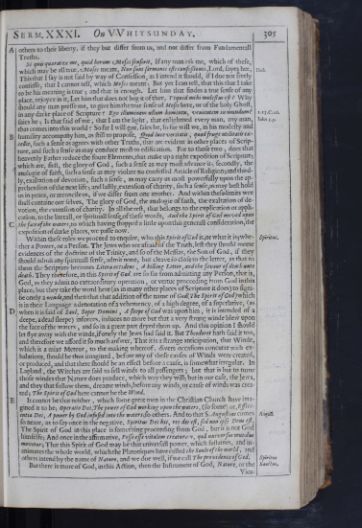 Serm. XXXI.
On VVWhitsunday.
305
others to their liberty, if they but differ from us, and not differ from Fundamentall
Serm. XXXI.
On VVWhitsunday.
305
others to their liberty, if they but differ from us, and not differ from Fundamentall
Truths.
Si quis quærat ex me, quid horum Moses senserit, If any man ask me, which of these,
which may be all true, Moses meant, Non sum sermones isti confessiones, Lord, sayes hee,
Ibid. This that I say is not said by way of Confession, as I intend it should, if I doe not freely
confesse, that I cannot tell, which Moses meant; But yet I can tell, that this that I take
to be his meaning is true; and that is enough. Let him that findes a true sense of any
place, rejoyce in it, Let him that does not beg it of thee, Vtquid mihi molest us est? Why
should any man presse me, to give him the true sense of Moses here, or of the holy Ghost,
in any darke place of Scripture? Ego illuminem ullum hominen, venientem in mundum?
1.13. C. 10. saies he; Is that said of me, that I am the light, that enlightned every man, any man,
Iohn 1.9. that comes into this world? So far I will goe, saies he, so far will we, in his modesty and
humility accompany him, as still to propose, Quod luce veritatis, quod fruge utilitatis ex-
cellit, such a sense as agrees with other Truths, that are evident in other places of Scrip-
ture, and such a sense as may conduce most to edisication. For to those two, does that
heavenly Father reduce the foure Elements, that make up a right exposition of Scripture;
which are, first, the glory of God, such a sense as may most advance it; secondly, the
analogie of faith, such a sense as may violate no confessed Article of Religion; and third-
ly, exaltation of devotion, such a sense, as may carry us most powerfully upon the ap-
prehension of the next life; and lastly, extension of charity, such a sense, as may best hold
us in peace, or reconcile us, if we differ from one another. And within these limits wee
shall containe our selves, The glory of God, the analogie of faith, the exaltation of de-
votion, the extension of charity. In all the rest, that belongs to the explication or appli-
cation, to the literall, or spirituall sense of these words, And the Spirit of God moved upon
the face of the waters, to which, having stopped a little upon this generall consideration, the
exposition of darke places, we passe now.
Within these rules we proceed to enquire, who this Spirit of God is, or what it is;Spiritus. whe-
ther a Power, or a Person. The Jews who are afraid of the Truth, lest they should meete
evidences of the doctrine of the Trinity, and so of the Messias, the Son of God, if they
should admit any spirituall sense, admit none, but cleave so close to the letter, as that to
them the Scripture becomes Liter a occidens, A killing Letter, and the savour of death unto
death. They therefore, in this Spirit of God are so far from admitting any Person, that is,
God, as they admit no extraordinary operation, or vertue proceeding from God in this
place; but they take the word here (as in many other places of Scripture it does) to signi-
fie onely a winde, and then that that addition of the name of God (The Spirit of God) which
is in their Language a denotation of a vehemency, of a high degree, of a superlative, (as
when it is said of Saul, Sopor Domini, A sleepe of God was upon him, it is intended of a
deepe, a dead sleepe) inforces, induces no more but that a very strong winde blew upon
the face of the waters, and so in a great part dryed them up. And this opinion I should
let flye away with the winde, if onely the Jews had said it. But Theodoret hath said it too,
and therefore we afford it so much answer, That it is a strange anticipation, that Winde,
which is a mixt Meteor, to the making whereof, divers occasions concurre with ex-
halations, should be thus imagined, before any of these causes of Winds were created,
or produced, and that there should be an effect before a cause, is somewhat irregular. In
Lapland, the Witches are said to sell winds to all passengers; but that is but to turne
those windes that Nature does produce, which way they will; but in our case, the Jews,
and they that follow them, dreame winds, before any winds, or cause of winds was crea-
ted; The Spirit of God here cannot be the Wind.
It cannot be that neither, which some great men in the Christian Church have ima-
gined it to be; Operatio Dei, The power of God working upon the waters, (so some) or, Effici-
entia Dei, A power by God infused into the waters; so others.August. And to that S. Augustine comes
so neare, as to say once in the negative, Spiritus Dei hic, res dei est, sed non ipse Deut est,
The Spirit of God in this place is something proceeding from God, but it is not God
himselfe; And once in the affirmative, Posse esse vitalem creaturam, quâ universus mundus
movetur; That this Spirit of God may be that universall power, which sustaines, and in-
animates the whole world, which the Platoniques have called the Soule of the world, and
others intend by the name of Nature, and we doe well, if we call The providence of God.Spiritus
Sanctus.
But there is more of God, in this Action, then the Instrument of God, Nature, or the Vice-
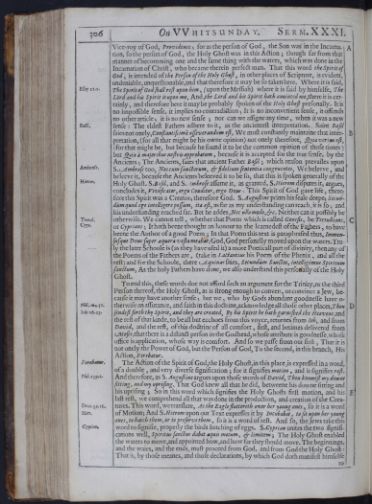 288
On VVWhitsunday.
Serm. XXXI.
Vice-roy of God, Providence; for as the person of God, the Son was in the Incarna-
288
On VVWhitsunday.
Serm. XXXI.
Vice-roy of God, Providence; for as the person of God, the Son was in the Incarna-tion, so the person of God, the Holy Ghost was in this Action; though far from that
manner of becomming one and the same thing with the waters, which was done in the
Incarnation of Christ, who became therein perfect man. That this word the Spirit of
God, is intended of the Person of the Holy Ghost, in other places of Scripture, is evident,
undeniable, unquestionable, and that therefore it may be so taken here. Where it is said,
The Spirit of God shall rest upon him,Esay 11.2. (upon the Messiah) where it is said by himselfe, The
Lord and his Spirit is upon me, And, the Lord and his Spirit hath anointed me, there it is cer-
tainly, and therefore here it may be probably spoken of the Holy Ghost personally. It is
no impossible sense, it implies no contradiction; It is no inconvenient sense, it offends
no other article; it is no new sense; nor can we assigne any time, when it was a new
sense:Basil. The eldest Fathers adhere to it, as the ancientest interpretation. Saint Basil
saies not onely, Constantissimè asseverandum est, We must constantly maintaine that inter-
pretation, (for all that might be his owne opinion) not onely therefore, Quia verius est,
(for that might be, but because he found it to be the common opinion of those times)
but Quia à majoribus nostris approbatum, because it is accepted for the true sense, by the
Ancients; The Ancients, saies that ancient Father Basil; which reason prevailes upon
S. Ambrose too, Ambrose. Nos cum sanctorum, & fidelium sententia congruentes, We beleeve, and
beleeve it, because the Ancients beleeved it to be so, that this is spoken generally of the
Holy Ghost.Hieron. S. Basil, and S. Ambrose assume it, as granted, S. Hierom disputes it, argues,
concludes it, Vivificator, ergo Conditor, ergo Deus; This Spirit of God gave life, there-
fore this Spirit was a Creator; therefore God. S. Augustine prints his seale deepe; Secun-
dùm quod ego intelligere possum, ita est, as far as my understanding can reach, it is so; and
his understanding reached far. But he addes, Nec ullomodo, &c. Neither can it possibly be
otherwise.Tertui. We cannot tell, whether that Poem which is called Genesis, be Tertullians,
or Cyprians; Cypt. It hath beene thought an honour to the learnedest of the Fathers, to have
beene the Author of a good Poem; In that Poem this text is paraphrased thus, Immen-
susque Deus super æquora vastameabat; God, God personally moved upon the waters. Tru-
ly the later Schoole is (as they have used it) a more Poeticall part of divinity, then any of
the Poems of the Fathers are, (take in Lactantius his Poem of the Phenix, and all the
rest) and for the Schoole, there Aquinas saies, Secundùm Sanctos, intelligimus Spiritum
sanctum, As the holy Fathers have done, we also understand this personally of the Holy
Ghost.
To end this, these words doe not afford such an argument for the Trinity, or the third
Person thereof, the Holy Ghost, as is strong enough to convert, or convince a Jew, be-
cause it may have another sense; but we, who by Gods abundant goodnesse have o-
therwise an assurance, Psal. 104.30. and faith in this doctrine, acknowledge all those other places, Thou
sendest forth thy Spirit, and they are created, By his spirit he hath garnished the Heavens, and Iob 26.13.
the rest of that kinde, to be all but ecchoes from this voyce, returnes from Iob, and from
David, and the rest, of this doctrine of all comfort, first, and betimes delivered from
Moses, that there is a distinct person in the Godhead, whose attribute is goodnesse, whose
office is application, whose way is comfort. And so we passe from our first, That it is
not onely the Power of God, but the Person of God, To the second, in this branch, His
Action, Ferebatur.
The Action of the Spirit of God, Ferebatur. the Holy Ghost, in this place, is expressed in a word,
of a double, and very diverse signification; for it signifies motion, and it signifies rest.
And therefore, Psal. 139.2. as S. Augustine argues upon those words of David, Thou knowest my downe
sitting, and my uprising, That God knew all that he did, betweene his downe sitting and
his uprising; So in this word which signifies the Holy Ghosts first motion, and his
last rest, we comprehend all that was done in the production, and creation of the Crea-
tures.Deut. 32.11. This word, we translate, As the Eagle fluttereth over her young ones, so it is a word
of Motion; And S. Hierom upon our Text expresses it by Hier. Incubabat, to sit upon her young
ones, to hatch them, or to preserve them, so it is a word of rest. And so, the Jews take this
word to signifie, Cyprian. properly the birds hatching of eggs. S. Cyprian unites the two signifi-
cations well, Spiritus sanctus dabat aquis motum, & limitem; The Holy Ghost enabled
the waters to move, and appointed how, and how far they should move. The beginnings,
and the waies, and the ends, must proceed from God, and from God the Holy Ghost:
That is, by those meanes, and those declarations, by which God doth manifest himselfe to
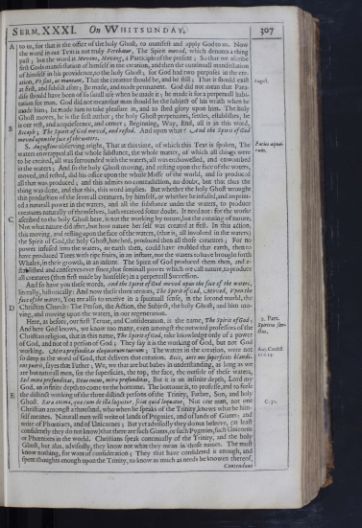 Serm. XXXI.
On VVWhitsunday.
307
to us, for that is the office of the holy Ghost, to manifest and apply God to us. Now
Serm. XXXI.
On VVWhitsunday.
307
to us, for that is the office of the holy Ghost, to manifest and apply God to us. Now
the word in our Text is not truly Ferebatur, The Spirit moved, which denotes a thing
past; but the word is Movens, Moving, a Participle of the present; So that we ascribe
first Gods manifestation of himself in the creation, and then the continuall manifestation
of himself in his providence, to the holy Ghost; for God had two purposes in the cre-
ation, Vt sint, ut maneant, That the creature should be, and be still;August. That it should exist
at first, and subsist after; Be made, and made permanent. God did not mean that Para-
dise should have been of so small use when he made it; he made it for a perpetuall habi-
tation for man. God did not mean that man should be the subject of his wrath when he
made him; he made him to take pleasure in, and to shed glory upon him. The holy
Ghost moves, he is the first author; the holy Ghost perpetuates, settles, establishes, he
is our rest, and acquiescence, and center; Beginning, Way, End, all is in this word,
Recaph; The Spirit of God moved, and rested. And upon what? And the Spirit of God
moved upon the face of the waters.
S. Augustine observing aright, That at this time, of which this Text is spoken, Facies aqua-
rum. The
waters enwrapped all the whole substance, the whole matter, of which all things were
to be created, all was surrounded with the waters, all was embowelled, and enwombed
in the waters; And so the holy Ghost moving, and resting upon the face of the waters,
moved, and rested, did his office upon the whole Masse of the world, and so produced
all that was produced; and this admits no contradiction, no doubt, but that thus the
thing was done, and that this, this word implies. But whether the holy Ghost wrought
this production of the severall creatures, by himself, or whether he infused, and imprint-
ed a naturall power in the waters, and all the substance under the waters, to produce
creatures naturally of themselves, hath received some doubt. It need not: for the worke
ascribed to the holy Ghost here, is not the working by nature, but the creating of nature;
Not what nature did after, but how nature her self was created at first. In this action,
this moving, and resting upon the face of the waters, (that is, all involved in the waters)
the Spirit of God, the holy Ghost, hatched, produced then all those creatures; For no
power infused into the waters, or earth then, could have enabled that earth, then to
have produced Trees with ripe fruits, in an instant, nor the waters to have brought forth
Whales, in their growth, in an instant. The Spirit of God produced them then, and e-
stablished and conserves ever since, that seminall power which we call nature, to produce
all creatures (then first made by himselfe) in a perpetuall Succession.
And so have you these words, And the Spirit of God moved upon the face of the waters,
literally, historically: And now these three termes, The Spirit of God, Moved, Vpon the
face of the waters, You are also to receive in a spirituall sense, in the second world, the
Christian Church: The Person, the Action, the Subject, the holy Ghost, and him mo-
ving, and moving upon the waters, in our regeneration.
Here, as before, our first Terme, and Consideration, is the name, The Spirit of God;
2. Part.
Spiritus san-
ctus. And here God knows, we know too many, even amongst the outward professors of the
Christian religion, that in this name, The Spirit of God, take knowledge only of a power
of God, and not of a person of God; They say it is the working of God, but not God
working. Mira profunditas eloquiorum tuorum; The waters in the creation, Aug. Confess.
12. c. 14. were not
so deep as the word of God, that delivers that creation. Ecce, ante nos superficies blandi-
ens pueris, sayes that Father; We, we that are but babes in understanding, as long as we
are but naturall men, see the superficies, the top, the face, the outside of these waters,
Sed mira profunditas, Deus meus, mira profunditas, But it is an infinite depth, Lord my
God, an infinite depth to come to the bottome. The bottome is, to professe, and to feele
the distinct working of the three distinct persons of the Trinity, Father, Son, and holy
Ghost. Rara anima, quæ cum de illa loquitur, sciat quid loquatur, Not one man, C. 30. not one
Christian amongst a thousand, who when he speaks of the Trinity, knows what he him-
self meanes. Naturall men will write of lands of Pygmies, and of lands of giants; and
write of Phoenixes, and of Unicornes; But yet advisedly they do not beleeve, (at least
confidently they do not know) that there are such Giants, or such Pygmies, such Unicorns
or Phoenixes in the world. Christians speak continually of the Trinity, and the holy
Ghost, but alas, advisedly, they know not what they mean in those names. The most
know nothing, for want of consideration; They that have considered it enough, and
spent thoughts enough upon the Trinity, to know as much as needs be knowen thereof, Contendunt
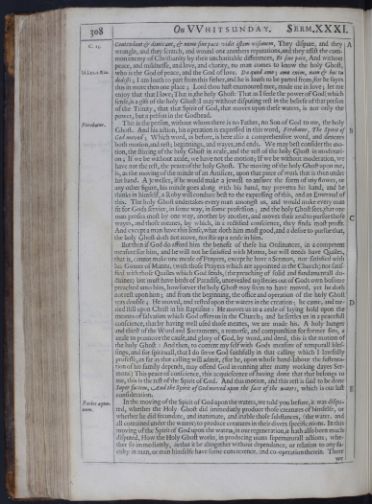 308
On VVWhitsunday.
Serm. XXXI.
Contendunt & dimicant,C. 11. & nemo sine pace vidit istam visionem, They dispute, and they
308
On VVWhitsunday.
Serm. XXXI.
Contendunt & dimicant,C. 11. & nemo sine pace vidit istam visionem, They dispute, and they
wrangle, and they scratch, and wound one anothers reputations, and they assist the com-
mon enemy of Christianity by their uncharitable differences, Et sine pace, And without
peace, and mildnesse, and love, and charity, no man comes to know the holy Ghost,
who is the God of peace, Id. l. 11.2. & 22. and the God of love. Da quod amo; amo enim, nam & hoc
tu dedisti; I am loath to part from this father, and he is loath to be parted from, for he sayes
this in more then one place; Lord thou hast enamoured mee, made me in love; let me
enjoy that that I love; That is, the holy Ghost: That as I feele the power of God (which
sense, is a gift of the holy Ghost) I may without disputing rest in the beliefe of that person
of the Trinity, that that Spirit of God, that moves upon these waters, is not only the
power, but a person in the Godhead.
This is the person, Ferebatur. without whom there is no Father, no Son of God to me, the holy
Ghost. And his action, his operation is expressed in this word, Ferebatur, The Spirit of
God moved; Which word, as before, is here also a comprehensive word, and denotes
both motion, and rest; beginnings, and wayes, and ends. We may best consider the mo-
tion, the stirring of the holy Ghost in zeale, and the rest of the holy Ghost in moderati-
on; If we be without zeale, we have not the motion; If we be without moderation, we
have not the rest, the peace of the holy Ghost. The moving of the holy Ghost upon me,
is, as the moving of the minde of an Artificer, upon that piece of work that is then under
his hand. A Jeweller, if he would make a jewell to answer the form of any flower, or
any other figure, his minde goes along with his hand, nay prevents his hand, and he
thinks in himself, a Ruby will conduce best to the expressing of this, and an Emeraud of
this. The holy Ghost undertakes every man amongst us, and would make every man
fit for Gods service, in some way, in some profession; and the holy Ghost sees, that one
man profits most by one way, another by another, and moves their zeal to pursue those
wayes, and those meanes, by which, in a rectified conscience, they finde most profit.
And except a man have this sense, what doth him most good, and a desire to pursue that,
the holy Ghost doth not move, nor stir up a zeale in him.
But then if God do afford him the benefit of these his Ordinances, in a competent
measure for him, and he will not be satisfied with Manna, but will needs have Quailes,
that is, cannot make one meale of Prayers, except he have a Sermon, nor satisfied with
his Gomer of Manna, (with those Prayers which are appointed in the Church) nor satis-
fied with those Quailes which God sends, (the preaching of solid and fundamentall do-
ctrines) but must have birds of Paradise, unrevealed mysteries out of Gods own bosome
preached unto him, howsoever the holy Ghost may seem to have moved, yet he doth
not rest upon him; and from the beginning, the office and operation of the holy Ghost
was double; He moved, and rested upon the waters in the creation; he came, and tar-
ried still upon Christ in his Baptisme: He moves us to a zeale of laying hold upon the
meanes of salvation which God offers us in the Church; and he settles us in a peacefull
conscience, that by having well used those meanes, we are made his. A holy hunger
and thirst of the Word and Sacraments, a remorse, and compunction for former sins, a
zeale to promove the cause, and glory of God, by word, and deed, this is the motion of
the holy Ghost: And then, to content my self with Gods measure of temporall bles-
sings, and for spirituall, that I do serve God faithfully in that calling which I lawfully
professe, as far as that calling will admit, (for he, upon whose hand-labour the sustenta-
tion of his family depends, may offend God in running after many working dayes Ser-
mons) This peace of conscience, this acquiescence of having done that that belongs to
me, this is the rest of the Spirit of God. And this motion, and this rest is said to be done
Super faciem, And the Spirit of God moved upon the face of the waters, which is our last
consideration.
In the moving of the Spirit of God upon the waters, Facies aqua-
rum. we told you before, it was dispu-
ted, whether the Holy Ghost did immediatly produce those creatures of himselfe, or
whether he did fecundate, and inanimate, and inable those substances, (the water, and
all contained under the waters) to produce creatures in their divers specifications. In this
moving of the Spirit of God upon the waters, in our regeneration, it hath also been much
disputed, How the Holy Ghost works, in producing mans supernaturall actions; whe-
ther so immediately, as that it be altogether without dependance, or relation to any fa-
culty in man, or man himselfe have some concurrence, and co-operation therein. There we
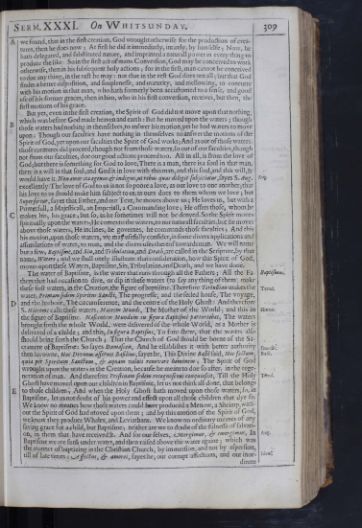 Serm. XXXI.
On VVWhitsunday.
309
we found, that in the first creation, God wrought otherwise for the production of crea-
Serm. XXXI.
On VVWhitsunday.
309
we found, that in the first creation, God wrought otherwise for the production of crea-tures, then he does now; At first he did it immediatly, intirely, by himselfe; Now, he
hath delegated, and substituted nature, and imprinted a naturall power in every thing to
produce the like. So in the first act of mans Conversion, God may be conceived to work
otherwise, then in his subsequent holy actions; for in the first, man cannot be conceived
to doe any thing, in the rest he may: not that in the rest God does not all; but that God
findes a better disposition, and souplenesse, and maturity, and mellowing, to concurre
with his motion in that man, who hath formerly been accustomed to a sense, and good
use of his former graces, then in him, who in his first conversion, receives, but then, the
first motions of his grace.
But yet, even in the first creation, the Spirit of God did not move upon that nothing,
which was before God made heaven and earth: But he moved upon the waters; though
those waters had nothing in themselves, to answer his motion, yet he had waters to move
upon: Though our faculties have nothing in themselves to answer the motions of the
Spirit of God, yet upon our faculties the Spirit of God works; And as out of those waters,
those creatures did proceed, though not from those waters, so out of our faculties, though
not from our faculties, doe our good actions proceed too. All in all, is from the love of
God; but there is something for God to love; There is a man, there is a soul in that man,
there is a will in that soul; and God is in love with this man, and this soul, and this will, Aug. &
would have it. Non amor ita egenus & indigus, ut rebus quas diligit subjiciatur, sayes S. Aug.
excellently: The love of God to us is not so poore a love, as our love to one another; that
his love to us should make him subject to us, as ours does to them whom we love; but
Superfertur, sayes that Father, and our Text, he moves above us; He loves us, but with a
Powerfull, a Majesticall, an Imperiall, a Commanding love; He offers those, whom he
makes his, his grace; but so, as he sometimes will not be denyed. So the Spirit moves
spiritually upon the waters; He comes to the waters, to our naturall faculties; but he moves
above those waters, He inclines, he governes, he commands those faculties; And this
his motion, upon those waters, we may usefully consider, in some divers applications and
assimilations of water, to man, and the divers uses thereof towards man. We will name
but a few; Baptisme, and Sin, and Tribulation, and Death, are called in the Scripture, by that
name, Waters; and we shall onely illustrate that consideration, how this Spirit of God,
moves upon these Waters, Baptisme, Sin, Tribulation, and Death, and we have done.
The water of Baptisme, is the water that runs through all the Fathers;Baptismus. All the Fa-
thers that had occasion to dive, or dip in these waters (to say any thing of them) make
these first waters, in the Creation, the figure of baptisme.Tertul. There Tertullian makes the
water, Primam sedem Spiritus Sancti, The progresse, and the setled house, The voyage,
and the harbour, The circumference, and the centre of the Holy Ghost: And therefore
S. Hierome calls these waters, Matrem Mundi, The Mother of the World;Hieron. and this in
the figure of Baptisme. Nascentem Mundum in figura Baptismi parturiebat, The waters
brought forth the whole World, were delivered of the whole World, as a Mother is
delivered of a childe; and this, In figura Baptismi, To fore-shew, that the waters also
should bring forth the Church; That the Church of God should be borne of the Sa-
crament of Baptisme: So sayes Damascen,Damasc. And he establishes it with better authority
then his owne, Basil. Hoc Divinus asseruit Basilius, sayes he, This Divine Basil said, Hoc factum,
quia per Spiritum Sanctum, & aquam voluit renovare hominem; The Spirit of God
wrought upon the waters in the Creation, because he meant to doe so after, in the rege-
neration of man. And therefore Pristinam sedem recognoscens conquiescit,Tertul. Till the Holy
Ghost have moved upon our children in Baptisme, let us not think all done, that belongs
to those children; And when the Holy Ghost hath moved upon those waters, so, in
Baptisme, let us not doubt of his power and effect upon all those children that dye so.
We know no meanes how those waters could have produced a Menow, a Shrimp, with-
out the Spirit of God had moved upon them; and by this motion of the Spirit of God,
we know they produce Whales, and Leviathans. We know no ordinary meanes of any
saving grace for a child, but Baptisme; neither are we to doubt of the fulnesse of salvati-
on, in them that have received it. And for our selves, Mergimur, & emergimus,Aug. In
Baptisme we are sunk under water, and then raised above the water againe; which was
the manner of baptizing in the Christian Church, by immersion, and not by aspersion,
till of late times: Affectus, & ameres, sayes he, our corrupt affections, Idem. and our inor-
dinate
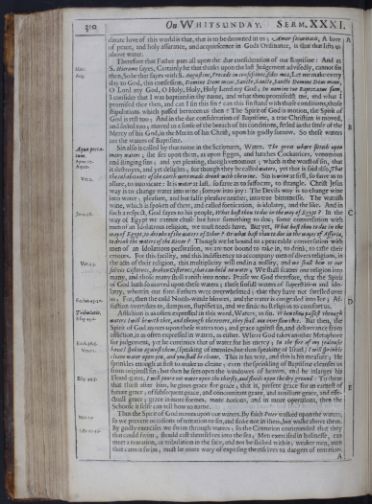 310
On VVWhitsunday.
Serm. XXXI.
dinate love of this world is that, that is to be drowned in us; Amor securitatis, A love
310
On VVWhitsunday.
Serm. XXXI.
dinate love of this world is that, that is to be drowned in us; Amor securitatis, A love
of peace, and holy assurance, and acquiescence in Gods Ordinance, is that that lifts us
above water.
Therefore that Father puts all upon the due consideration of our Baptisme: And as
S. Hierome sayes, Hier. Certainly he that thinks upon the last Judgement advisedly, cannot sin
then, Aug. So he that sayes with S. Augustine, Procede in confessionc, fides mea, Let me make every
day to God, this confession, Domine Deus meus, Sancte, Sancte, Sancte Domine Deus meus,
O Lord my God, O Holy, Holy, Holy Lord my God; In nomine tuo Baptizatus sum,
I consider that I was baptized in thy name, and what thou promisedst me, and what I
promised thee then, and can I sin this sin? can this sin stand with those conditions, those
stipulations which passed between us then? The Spirit of God is motion, the Spirit of
God is rest too; And in the due consideration of Baptisme, a true Christian is moved,
and setled too; moved to a sense of the breach of his conditions, setled in the sense of the
Mercy of his God, in the Merits of his Christ, upon his godly sorrow. So these waters
are the waters of Baptisme.
Sin also is called by that name in the Scriptures, Aquæ pecca-
tum. Water. The great whore sitteth upon
many waters; she sits upon them, as upon Egges, and hatches Cockatrices, venomous
and stinging sins;Apoc. 17. and yet pleasing, though venomous; which is the worst of sin, that
it destroyes, Aqin. and yet delights; for though they be called waters, yet that is said also, That
the inhabitants of the earth were made drunk with the wine.Ver. 2. Sin is wine at first, so farre as to
allure, to intoxicate: It is water at last, so farre as to suffocate, to strangle. Christ Jesus
way is to change water into wine; sorrow into joy: The Devils way is to change wine
into water; pleasure, and but false pleasure neither, into true bitternesse. The watrish
wine, which is spoken of there, and called fornication, is idolatry, and the like. And in
such a respect, Jer. 2.18. God sayes to his people, What hast thou to doe in the way of Egypt? In the
way of Egypt we cannot chuse but have something to doe; some conversation with
men of an Idolatrous religion, we must needs have. But yet, What hast thou to doe in the
way of Egypt, to drinke of the waters of Sihor? Or what hast thou to doe in the wayes of Assyria,
to drink the waters of the River? Though we be bound to a peaceable conversation with
men of an Idolatrous perswasion, we are not bound to take in, to drink, to taste their
errours. For this facility, and this indifferency to accompany men of divers religions, in
the acts of their religion, Ver. 13. this multiplicity will end in a nullity, and we shall hew to our
selves Cisternes, broken Cisternes, that can hold no water; We shall scatter one religion into
many, and those many shall vanish into none. Praise we God therefore, that the Spirit
of God hath so moved upon these waters; these sinfull waters of superstition and ido-
latry, wherein our fore-Fathers were overwhelmed; that they have not swelled over
us;Ecclus. 43.20. For, then the cold North-winde blowes, and the water is congealed into Ice; Af-
fliction overtakes us, damps us, stupifies us, and we finde no Religion to comfort us.
Affliction is as often expressed in this word, Tribulatio. Waters, as sin. When thou passest through
waters I will be with thee, and through the rivers, they shall not overflow thee. Esay 43.2. But then, the
Spirit of God moves upon these waters too; and grace against sin, and deliverance from
affliction, is as often expressed in waters, as either. Where God takes another Metaphore
for judgement, Ezek. 36.5.
Ver. 25. yet he continues that of water for his mercy; In the fire of my jealousie
have I spoken against them, (speaking of enemies; but then speaking of Israel) I will sprinkle
cleane water upon you, and you shall be cleane. This is his way, and this is his measure; He
sprinkles enough at first to make us cleane; even the sprinkling of Baptisme cleanses us
from originall sin; but then he sets open the windowes of heaven, and he inlarges his
Flood-gates, Esay 44.3. I will poure out water upon the thirsty, and floods upon the dry ground: To them
that thirst after him, he gives grace for grace; that is, present grace for an earnest of
future grace; of subsequent grace, and concomitant grace, and auxiliant grace, and effe-
ctuall grace; grace in more formes, more notions, and in more operations, then the
Schoole it selfe can tell how to name.
Thus the Spirit of God moves upon our waters.Mat. 14. By faith Peter walked upon the waters;
so we prevent occasions of tentation to sin, and sinke not in them, but walke above them.
By godly exercises we swim through waters; so the Centurion commanded that they
that could swim, Acts 27.43. should cast themselves into the sea; Men exercised in holinesse, can
meet a tentation, or tribulation in the face, and not be shaked with it; weaker men, men
that cannot swim, must be more wary of exposing themselves to dangers of tentation; A
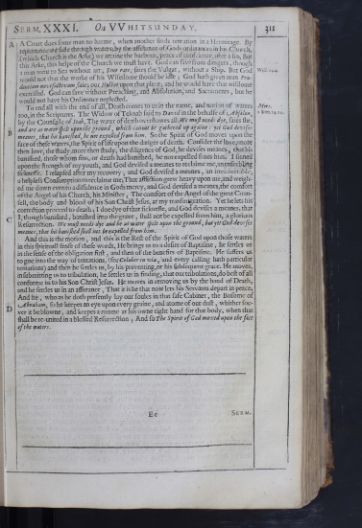 Serm. XXXI.
On VVWhitsunday.
311
A Court does some man no harme, when another finds tentation in a Hermitage. By
Serm. XXXI.
On VVWhitsunday.
311
A Court does some man no harme, when another finds tentation in a Hermitage. By
repentance we saile through waters; by the assistance of Gods ordinances in his Church,
(which Church is the Arke) we attaine the harbour, peace of conscience, after a sin; But
this Arke, this helpe of the Church we must have. God can save from dangers, though
a man went to Sea without art, Sine rate, saies the Vulgat, without a Ship.Wisd. 14.4. But God
would not that the worke of his Wisedome should be idle; God hath given man Pru-
dentiam navifactivam, saies our Holkot upon that place, and he would have that wisdome
exercised. God can save without Preaching, and Absolution, and Sacraments, but he
would not have his Ordinance neglected.
To end all with the end of all, Death comes to us in the name, Mors. and notion of waters
too, in the Scriptures. 2 Sam. 14.14. The Widow of Tekoah said to David in the behalfe of Absalon,
by the Counsaile of Ioab, The water of death overslowes all; We must needs dye, saies she,
and are as water spilt upon the ground, which cannot be gathered up againe: yet God devises
meanes, that his banished, be not expelled from him. So the Spirit of God moves upon the
face of these waters, the Spirit of life upon the danger of death. Consider the love, more
then love, the study, more then study, the diligence of God; he devises meanes, that his
banished, those whom sins, or death had banished, be not expelled from him. I sinned
upon the strength of my youth, and God devised a meanes to reclaime me, an enfeebling
sicknesse. I relapsed after my recovery, and God devised a meanes, an irrecoverable,
a helpless Consumption to reclaime me; That affliction grew heavy upon me, and weigh-
ed me down even to a diffidence in Gods mercy, and God devised a meanes, the comfort
of the Angel of his Church, his Minister, The comfort of the Angel of the great Coun-
sell, the body and blood of his Son Christ Jesus, at my transmigration. Yet he lets his
correction proceed to death; I doe dye of that sicknesse, and God devises a meanes, that
I, though banished, banished into the grave, shall not be expelled from him, a glorious
Resurrection. We must needs dye and be as water spilt upon the ground, but yet God devises
meanes, that his banished shall not be expelled from him.
And this is the motion, and this is the Rest of the Spirit of God upon those waters
in this spirituall sense of these words, He brings us to a desire of Baptisme, he settles us
in the sense of the obligation first, and then of the benefits of Baptisme. He suffers us
to goe into the way of tentations, (for Coluber in via, and every calling hath particular
tentations) and then he settles us, by his preventing, or his subsequent grace. He moves,
in submitting us to tribulation, he settles us in finding, that our tribulations, do best of all
conforme us to his Son Christ Jesus. He moves in removing us by the hand of Death,
and he settles us in an assurance, That it is he that now lets his Servants depart in peace;
And he, who as he doth presently lay our soules in that safe Cabinet, the Bosome of
Abraham, so he keepes an eye upon every graine, and atome of our dust, whither soe-
ver it be blowne, and keepes a roome at his owne right hand for that body, when that
shall be re-united in a blessed Resurrection; And so The Spirit of God moved upon the face
of the waters. Ee Serm.
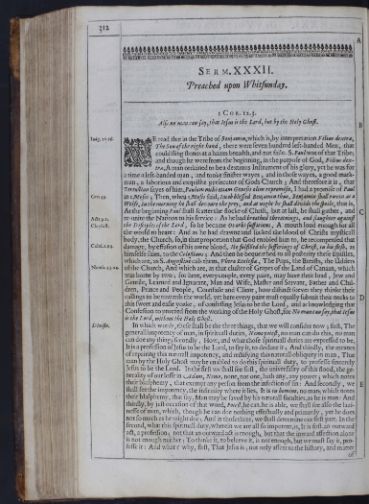 312
312
Serm. XXXII.
Preached upon Whitsunday.
1 Cor. 12.3.
Also no man can say, that Iesus is the Lord, but by the Holy Ghost. WEWe read that in the Tribe of Benjamin, Iudg. 20.16. which is, by interpretation Filius dextræ,
The Son of the right hand, there were seven hundred left-handed Men, that
could sling stones at a haires breadth, and not faile. S. Paul was of that Tribe;
and though he were from the beginning, in the purpose of God, Filius dex-
træ, A man ordained to be a dextrous Instrument of his glory, yet he was for
a time a left-handed man, and tooke sinister wayes, and in those wayes, a good mark-
man, a laborious and exquisite persecutor of Gods Church; And therefore it is, that
Tertullian sayes of him, Paulum mihi etiam Genesis olim repromisit, I had a promise of Paul
in Moses;Gen 49. Then, when Moses said, Iacob blessed Benjamin thus, Benjamin shall ravin as a
Wolfe, In the morning he shall devoure the prey, and at night he shall divide the spoile, that is,
At the beginning Paul shall scatter the flocke of Christ, but at last, he shall gather, and
re-unite the Nations to his service:Acts 9.1. As he had breathed threatnings, and slaughter against
the Disciples of the Lord, so he became Os orbi sufficiens, Chrysost. A mouth loud enough for all
the world to heare: And as he had drawne and sucked the blood of Christs mysticall
body, the Church, so, in that proportion that God enabled him to, he recompensed that
damage, Colos. 1.14. by effusion of his owne blood, He fulfilled the sufferings of Christ, in his flesh, as
himselfe saies, to the ColoßiansColossians; And then he bequeathed to all posterity these Epistles,
which are, as S. Augustine cals them, Vbera Ecclesiæ, The Paps, the Breasts, the Udders
of the Church, Numb. 13.24. And which are, as that cluster of Grapes of the Land of Canaan, which
was borne by two; for here, every couple, every paire, may have their load, Jew and
Gentile, Learned and Ignorant, Man and Wife, Master and Servant, Father and Chil-
dren, Prince and People, Counsaile and Client, how distinct soever they thinke their
callings to be towards the world, yet here every paire must equally submit their necks to
this sweet and easie yoake, of confessing Jesus to be the Lord, and acknowledging that
Confession to proceed from the working of the Holy Ghost, for No man can say, that Iesus
is the Lord, without the Holy Ghost. In which words, Divisio. these shall be the three things, that we will consider now; first, The
generall impotency of man, in spirituall duties, Nemo potest, no man can do this, no man
can doe any thing; secondly, How, and what those spirituall duties are expressed to be,
It is a profession of Jesus to be the Lord, to say it, to declare it; And thirdly, the meanes
of repairing this naturall impotency, and rectifying this naturall obliquity in man, That
man by the Holy Ghost may be enabled to do this spirituall duty, to professe sincerely
Jesus to be the Lord. In the first we shall see first, the universality of this flood, the ge-
nerality of our losse in Adam, Nemo, none, not one, hath any, any power; which notes
their blasphemy, that exempt any person from the infection of sin: And secondly, we
shall see the impotency, the infirmity where it lies, It is in homine, no man; which notes
their blasphemy, that say, Man may be saved by his naturall faculties, as he is man: And
thirdly, by just occasion of that word, Potest, he can, he is able, we shall see also the lazi-
nesse of man, which, though he can doe nothing effectually and primarily, yet he does
not so much as he might doe; And in those three, we shall determine our first part. In the
second, what this spirituall duty, wherein we are all so impotent, is, It is first, an outward
act, a profession; not that an outward act is enough, but that the inward affection alone
is not enough neither; To thinke it, to beleeve it, is not enough, but we must say it, pro-
fesse it: And what? why, first, That Jesus is; not only assent to the history, and matter of
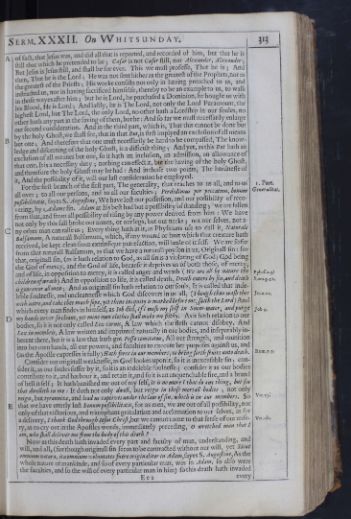 Serm. XXXII.
On VVWhitsunday.
313
of fact, that Jesus was, and did all that is reported, and recorded of him, but that he is
Serm. XXXII.
On VVWhitsunday.
313
of fact, that Jesus was, and did all that is reported, and recorded of him, but that he is
still that which he pretended to be; Cæsar is not Cæsar still, nor Alexander, Alexander;
But Jesus is Jesus still, and shall be for ever. This we must professe, That he is; And
then, That he is the Lord; He was not sent hither as the greatest of the Prophets, nor as
the greatest of the Priests; His worke consists not only in having preached to us, and
instructed us, nor in having sacrificed himselfe, thereby to be an example to us, to walk
in those wayes after him; but he is Lord, he purchased a Dominion, he bought us with
his Blood, He is Lord; And lastly, he is The Lord, not only the Lord Paramount, the
highest Lord, but The Lord, the only Lord, no other hath a Lordship in our soules, no
other hath any part in the saving of them, but he: And so far we must necessarily enlarge
our second consideration. And in the third part, which is, That this cannot be done but
by the holy Ghost, we shall see, that in that But, is first implyed an exclusion of all means
but one; And therefore that one must necessarily be hard to be compassed, The know-
ledge and discerning of the holy Ghost, is a difficult thing; And yet, as this But hath an
exclusion of all meanes but one, so it hath an inclusion, an admission, an allowance of
that one, It is a necessary duty; nothing can effect it, but the having of the holy Ghost,
and therefore the holy Ghost may be had: And in those two points, The hardnesse of
it, And the possibility of it, will our last consideration be employed. For the first branch of the first part, The generality, that reaches to us all, 1. Part. and to us
all over; to all our persons, and to all our faculties; Generalitas. Perdidimus per peccatum, bonum
possibilitatis, sayes S. Augustine, We have lost our possession, and our possibility of reco-
vering, by Adams sin. Adam at his best had but a possibility of standing; we are fallen
from that, and from all possibility of rising by any power derived from him: We have
not only by this fall broke our armes, or our legs, but our necks; not our selves, not a-
ny other man can raise us; Every thing hath in it, as Physitians use to call it, Naturale
Balsamum, A naturall Balsamum, which, if any wound or hurt which that creature hath
received, be kept clean from extrinsique putrefaction, will heale of it self. We are so far
from that naturall Balsamum, as that we have a naturall poyson in us, Originall sin: for
that, originall sin, (as it hath relation to God, as all sin is a violating of God) God being
the God of mercy, and the God of life, because it deprives us of both those, of mercy,
and of life, in opposition to mercy, it is called anger and wrath Ephes. 2.3. (We are all by nature the
children of wrath) And in opposition to life, it is called death, Rom. 5.12. Death enters by sin, and death
is gone over all men; And as originall sin hath relation to our souls, It is called that inde-
leble foulnesse, and uncleannesse which God discovers in us all, Jer. 2.22. (Though thou wash thee
with nitre, and take thee much sope, yet thine iniquity is marked before me, saith the Lord) And
which every man findes in himself, as Iob did, If I wash my self in Snow-water, Job 9. and purge
my hands never so cleane, yet mine own clothes shall make me filthy. As it hath relation to our
bodies, so it is not only called Lex carnis, A law which the flesh cannot disobey, And
Lex in membris, A law written and imprinted naturally in our bodies, and inseparably in-
herent there, but it is a law that hath got Posse comitatus, All our strength, and munition
into her own hands, all our powers, and faculties to execute her purposes against us, and
(as the Apostle expresses it fully) Hath force in our members, to bring forth fruits unto death.Rom. 7.5. Consider our originall weaknesse, as God lookes upon it, so it is inexcusable sin; con-
sider it, as our soules suffer by it, so it is an indeleble foulnesse; consider it as our bodies
contribute to it, and harbour it, and retain it, and so it is an unquenchable fire, and a brand
of hell it self; It hath banished me out of my self, It is no more I that do any thing, but sin
that dwelleth in me: It doth not only dwell, but reign in these mortall bodies; not only
reign, but tyrannize, and lead us captives under the law of sin, which is in our members.Ver. 23. So
that we have utterly lost Bonum possibilitatis, for as men, we are out of all possibility, not
only of that victorious, and triumphant gratulation and acclamation to our selves, as for
a delivery, I thank God through Iesus Christ, Ver. ult. but we cannot come to that sense of our mise-
ry, as to cry out in the Apostles words, immediately preceding, O wretched man that I
am, who shall deliver me from the body of this death? Now as this death hath invaded every part and faculty of man, understanding, and
will, and all, (for though originall sin seem to be contracted without our will, yet Sicut
omnium natura, ita omnium voluntates fuere originaliter in Adam, sayes S. Augustine, As the
whole nature of mankinde, and so of every particular man, was in Adam, so also were
the faculties, and so the will of every particular man in him) so this death hath invaded Ee2 every
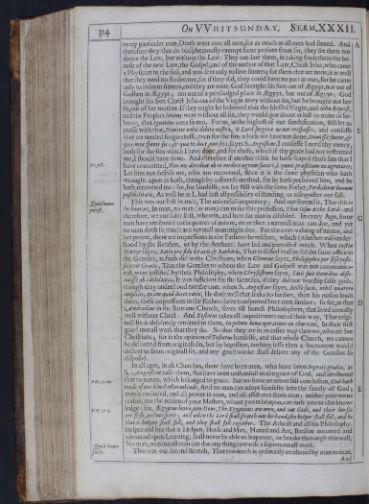 314
On VVWhitsunday.
Serm. XXXII.
every particular man; Death went over all men, for as much as all men had sinned. And
314
On VVWhitsunday.
Serm. XXXII.
every particular man; Death went over all men, for as much as all men had sinned. And
therefore they that do blasphemously exempt some persons from sin, they set them not
above the Law, but without the Law: They out-law them, in taking from them the be-
nefit of the new Law, the Gospel, and of the author of that Law, Christ Jesus, who came
a Physitian to the sick, and was sent only to save sinners; for them that are none, it is well
that they need no Redeemer, for if they did, they could have no part in ours, for he came
only to redeem sinners, and they are none. God brought his Son out of Ægypt, not out of
Goshen in Ægypt; not out of a priviledged place in Ægypt, but out of Ægypt; God
brought his Son Christ Jesus out of the Virgin Mary without sin, but he brought not her
so, out of her mother. If they might be beleeved that the blessed Virgin, and Iohn Baptist,
and the Prophet Ieremy were without all sin, they would goe about at last to make us be-
leeve, that Ignatius were so too. For us, in the highest of our sanctification, still let us
presse with that, Dimitte nobis debita nostra, O Lord forgive us our trespasses, and confesse
that we needed forgivenesse, even for the sins which we have not done; Dimissa fateor, &
quæ mea sponte feci, & quæ te duce, non feci, sayes S. Augustine, I confesse I need thy mercy,
both for the sins which I have done, and for those, which if thy grace had not restrained
me, I should have done. And therefore if another think he hath scaped those sins that I
have committed, August. Non me derideat ab eo medico ægrum sanari, à quœi præstitum ne ægrotaret;
Let him not despise me, who am recovered, since it is the same physitian who hath
wrought upon us both, though by a diverse method, for he hath preserved him, and he
hath recovered me: for, for himselfe, we say still with the same Father, Perdiderat bonum
possibilitatis, As well he as I, had lost all possibility of standing, or rising after our fall. This was our first branch, Quid homo
potest. The universall impotency; And our second is, That this is
In homine, In man, no man (as man) can make this profession, That Iesus is the Lord: and
therefore, we consider first, wherein, and how far man is disabled. In every Age, some
men have attributed to the power of nature, more then a naturall man can doe, and yet
no man doth so much as a naturall man might doe. For the over-valuing of nature, and
her power, there are impressions in the Fathers themselves, which (whether mis-under-
stood by the Readers, or by the Authors) have led and prevailed much. When Iustin
Martyr sayes, Ratio pro fide Græcis & Barbaris, That rectified reason did the same office in
the Gentiles, as faith did in the Christians; when Clement sayes, Philosophia per sese justi-
ficavit Græcos, That the Gentiles to whom the Law and Gospell was not communica-
ted, were justified by their Philosophy; when Chrysostome sayes, Satis fuit Gentibus absti-
nuisse ab Idololatria, It was sufficient for the Gentiles, if they did not worship false gods,
though they understood not the true; when S. Augustine sayes, Rectè facis, nihil quærere
ampliùs, quàm quod docet ratio, He doth well that seeks no farther, then his reason leads
them, these impressions in the Fathers have transported later men farther; so far, as that
Andradius in the Romane Church, saves all honest Philosophers, that lived morally
well without Christ: And Tostatus takes all impediments out of their way, That origi-
nall sin is absolutely remitted to them, In prima bona operatione in charitate, In their first
good morall work that they do. So that they are in an easier way then we, who are but
Christians; for in the opinion of Tostatus himselfe, and that whole Church, we cannot
be delivered from originall sin, but by baptisme; nothing lesse then a Sacrament would
deliver us from originall sin, and any good worke shall deliver any of the Gentiles so
disposed. In all ages, in all Churches, there have been men, who have been Ingrati gratiæ, as
S. Augustine calls them, that have been unthanfullunthankfull to the grace of God, and attributed
that to nature, Act. 17.26. which belonged to grace. But we have an universall conclusion, God hath
made of one blood all mankinde, And no man can adopt himselfe into the family of God;
man is excluded, and all power in man, and all assistance from man; neither your owne
reason, nor the reason of your Masters, whom you relie upon, can raise you to this know-
ledge: for, Esay 31.3. Ægyptus homo, non Deus, The Egyptians are men, and not Gods, and their horses
are flesh, and not spirit; and when the Lord shall stretch out his hand, the helper shall fall, and he
that is holpen shall fall, and they shall fall together. The Atheist and all his Philosophy,
Helper and hee that is Holpen, Horse and Man, Nature and Art, Reason mounted and
advanced upon Learning, shall never be able to leap over, or breake thorough this wall,
No man, no naturall man can doe any thing towards a supernaturall work. This was our second Branch, Quid homo
facit. That too much is ordinarily attributed by man to man, And
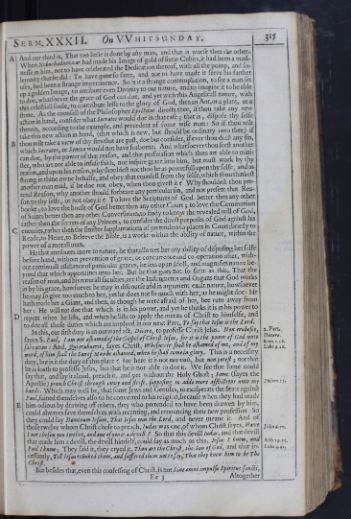 Serm. XXXII.
On VVWhitsunday.
315
And our third is, That too little is done by any man, and that is worse then the other.
Serm. XXXII.
On VVWhitsunday.
315
And our third is, That too little is done by any man, and that is worse then the other.
When Nebuchadnezzar had made his Image of gold of sixtie Cubits, it had been a mad-
nesse in him, not to have celebrated the Dedication thereof, with all the pomp, and so-
lemnity that he did: To have gone so farre, and not to have made it serve his farther
uses, had been a strange impertinence. So is it a strange contemplation, to see a man set
up a golden Image, to attribute even Divinity to our nature, and to imagine it to be able
to doe, whatsoever the grace of God can doe, and yet with this Angelicall nature, with
this celestiall soule, to contribute lesse to the glory of God, then an Ant, or a plant, or a
stone. As the counsell of the Philosopher Epictetus directs thee, if thou take any new
action in hand, consider what Socrates would doe in that case; that is, dispose thy selfe
therein, according to the example, and precedent of some wise man: So if thou wilt
take this new action in hand, (that which is new, but should be ordinary unto thee) if
thou wilt take a view of thy sins that are past, doe but consider, if ever thou didst any sin,
which Socrates, or Seneca would not have forborne. And whatsoever thou seest another
can doe, by the power of that reason, and that perswasion which thou art able to mini-
ster, who art not able to infuse faith, nor inspire grace into him, but must work by thy
reason, and upon his reason, why shouldest not thou be as powerfull upon thy selfe, and as
strong in thine owne behalfe, and obey that counsell from thy selfe, which thou thinkest
another man mad, if he doe not obey, when thou givest it? Why shouldest thou pre-
tend Reason, why another should forbeare any particular sin, and not present that Rea-
son to thy selfe, or not obey it? To love the Scriptures of God better then any other
booke; to love the house of God better then any other Court; to love the Communion
of Saints better then any other Conversation; to study to know the revealed will of God,
rather then the secrets of any Princes; to consider the direct purposes of God against his
enemies, rather then the sinister supplantations of pretenders to places in Court; briefly to
Reade, to Heare, to Beleeve the Bible, is a worke within the ability of nature, within the
power of a morall man. He that attributes more to nature, he that allowes her any ability of disposing her selfe
before hand, without prevention of grace, or concurrence and co-operation after, with-
out continuall assistance of particular graces, he sets up an Idoll, and magnifies nature be-
yond that which appertaines unto her. But he that goes not so farre as this, That the
reason of man, and his naturall faculties, are the Instruments and Organs that God works
in by his grace, howsoever he may in discourse and in argument exalt nature, howsoever
he may so give too much to her, yet he does not so much with her, as he might doe: He
hath made her a Giant, and then, as though he were afraid of her, hee runs away from
her: He will not doe that which is in his power, and yet he thinks it is in his power to
repent when he lists, and when he lists to apply the merits of Christ to himselfe, and
to doe all those duties which are implyed in our next Part, To say that Iesus is the Lord. In this, our first duty is an outward act, Dicere, to professe Christ Jesus. 2. Part.
Dicere. Non erubesco,
sayes S. Paul, I am not ashamed of the Gospel of Christ Iesus, for it is the power of God unto
salvation: And, Qui erubuerit, sayes Christ, Rom. 1.16 Whosoever shall be ashamed of me, and of my
word, of him shall the Son of Man be ashamed, when he shall come in glory. This is a necessary Luke 9.26.
duty, but is it the duty of this place? for here it is not non vult, but non potest; not that
he is loath to professe Jesus, but that he is not able to doe it. We see that some could
say that, and say it aloud, preach it, and yet without the Holy Ghost; Some (sayes the
Apostle) preach Christ through envy and strife, Philem. 15. supposing to adde more afflictions unto my
bands. Which may well be, that some Jews and Gentiles, to exasperate the State against
Paul, fained themselves also to be converted to his religion, because when they had made
him odious by drawing off others, they who pretended to have been drawen by him,
could alwayes save themselves with recanting, and renouncing their new profession: So
they could say Dominum Iesum, That Iesus was the Lord, and never meane it. And of
those twelve whom Christ chose to preach, Iudas was one, of whom Christ sayes, John 6.70. Have
I not chosen you twelve, and one of you is a devill? So that this devill Iudas, and that devill
that made him a devill, the devill himself, could say as much as this, Iesus I know, Acts 19.15. and
Paul I know; They said it, they cryed it, Luke 4.41. Thou art the Christ, the Son of God, and that in-
cessantly, Till Iesus rebuked them, and suffered them not to say, That they knew him to be The
Christ. But besides that, even this confessing of Christ, is not Sine omni impulsu Spiritus sancti, Ee3 Altogether
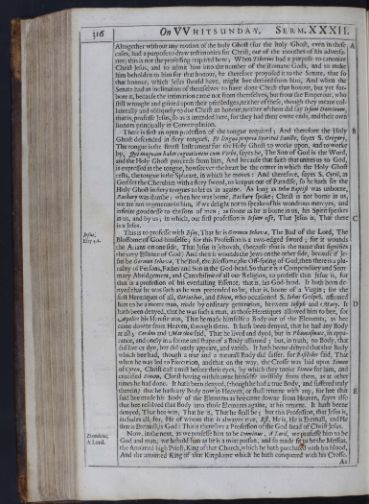 316
On VVWhitsunday.
Serm. XXXII.
Altogether without any motion of the holy Ghost (for the holy Ghost, even in these
316
On VVWhitsunday.
Serm. XXXII.
Altogether without any motion of the holy Ghost (for the holy Ghost, even in these
cases, had a purpose to draw testimonies for Christ, out of the mouthes of his adversa-
ries) this is not the professing required here; When Tiberius had a purpose to canonize
Christ Jesus, and to admit him into the number of the Romane Gods, and to make
him beholden to him for that honour, he therefore proposed it to the Senate, that so
that honour, which Jesus should have, might bee derived from him, And when the
Senate had an inclination of themselves to have done Christ that honour, but yet for-
bore it, because the intimation came not from themselves, but from the Emperour, who
still wrought and gained upon their priviledges, neither of these, though they meant col-
laterally and obliquely to doe Christ an honour, neither of them did say Iesum Dominum,
that is, professe Jesus, so as is intended here, for they had their owne ends, and their own
honors principally in Contemplation. There is first an open profession of the tongue required; And therefore the Holy
Ghost descended in fiery tongues, Et lingua propria Spiritui Sancto, sayes S. Gregory,
The tongue is the fittest Instrument for the Holy Ghost to worke upon, and to worke
by, Qui magnam habet cognationem cum Verbo, sayes he, The Son of God is the Word,
and the Holy Ghost proceeds from him, And because that faith that unites us to God,
is expressed in the tongue, howsoever the heart be the center in which the Holy Ghost
rests, the tongue is the Spheare, in which he moves: And therefore, sayes S. Cyril, as
God set the Cherubim with a fiery sword, to keep us out of Paradise, so he hath set the
Holy Ghost in fiery tongues to let us in againe. As long as Iohn Baptist was unborne,
Zachary was dumbe; when hee was borne, Zachary spoke; Christ is not borne in us,
we are not regenerate in him, if we delight not to speake of his wondrous mercyes, and
infinite goodnesse to the sons of men; as soone as he is borne in us, his Spirit speakes
in us, and by us; in which, our first profession is Iesum esse, That Jesus is, That there
is a Jesus. This is to professe with Esay, Iesus.
Esay 4.2. That he is Germen Iehovæ, The Bud of the Lord, The
Blossome of God himselfe; for this Profession is a two-edged sword; for it wounds
the Arians on one side, That Jesus is Jehovah, (because that is the name that signifies
the very Essence of God) And then it wounds the Jews on the other side, because if Je-
sus be Germen Iehovæ, The Bud, the Blossome, the Off-spring of God, then there is a plu-
rality of Persons, Father and Son in the God-head. So that it is a Compendiary and Sum-
mary Abridgement, and Catechisme of all our Religion, to professe that Jesus is, for
that is a profession of his everlasting Essence, that is, his God-head. It hath been de-
nyed that he was such as he was pretended to be, that is, borne of a Virgin; for the
first Heretiques of all, Gerinthus, and Ebion, who occasioned S. Iohns Gospel, affirmed
him to be a meere man, made by ordinary generation, between Ioseph and Mary. It
hath been denyed, that he was such a man, as those Heretiques allowed him to bee, for
Apelles his Heresie was, That he made himselfe a Body out of the Elements, as hee
came downe from Heaven, through them. It hath been denyed, that he had any Body
at all; Cerdon and Marcion said, That he lived and dyed, but in Phantasmate, in appa-
rance, and onely in a forme and shape of a Body assumed; but, in truth, no Body, that
did live or dye, but did onely appeare, and vanish. It hath beene denyed that that Body
which hee had, though a true and a naturall Body did suffer, for Basilides said, That
when he was led to Execution, and that on the way, the Crosse was laid upon Simon
of Cyren, Christ cast a mist before their eyes, by which they tooke Simon for him, and
crucified Simon, Christ having withdrawne himselfe invisibly from them, as at other
times he had done. It hath been denyed, (though he had a true Body, and suffered truly
therein) that he hath any Body now in Heaven, or shall returne with any, for hee that
said hee made his Body of the Elements as hee came downe from Heaven, sayes also
that hee resolved that Body into those Elements againe, at his returne. It hath beene
denyed, That hee was, That he is, That he shall be; but this Profession, that Jesus is,
includes all, for, He of whom that is alwayes true, Est, He is, He is Eternall, and He
that is Eternall, is God: This is therefore a Profession of the God-head of Christ Jesus. Now, Dominus;
A Lord. in the next, as we professe him to be Dominus, A Lord, we professe him to be
God and man, we behold him as he is a mixt person, and so made fit to be the Messias,
the Anointed high Priest, King of that Church, which he hath purchased with his blood,
And the anointed King of that Kingdome which he hath conquered with his Crosse. As
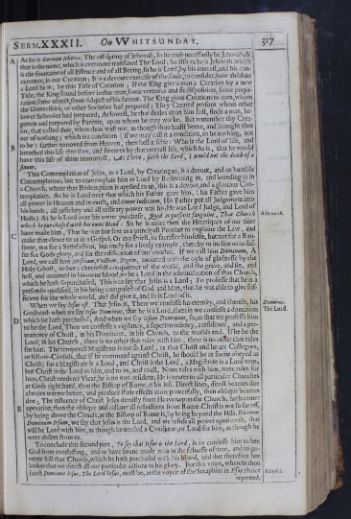 Serm. XXXII.
On VVWhitsunday.
317
As he is Germen Iehovæ, The off-spring of Jehovah, so he must necessarily be Jehovah; &
Serm. XXXII.
On VVWhitsunday.
317
As he is Germen Iehovæ, The off-spring of Jehovah, so he must necessarily be Jehovah; &
that is the name, which is evermore translated The Lord; So also as he is Jehovah, which
is the fountaine of all Essence and of all Beeing, so he is Lord, by his interest, and his con-
currence, in our Creation; It is a devoute exercise of the soule, to consider, how absolute
a Lord he is, by this Title of Creation; If the King give a man a Creation by a new
Title, the King found before in that man, some vertuous and fit disposition, some prepa-
ration, some object, some subject of his favour. The King gives Creations to men, whom
the Universities, or other Societies had prepared; They Created persons whom other
lower Schooles had prepared; At lowest, he that deales upon him first, finds a man, be-
gotten and prepared by Parents, upon whom he may worke. But remember thy Crea-
tor, that called thee, when thou wast not, as though thou hadst beene, and brought thee
out of nothing; which is a condition (if we may call it a condition, to be nothing, not
to be) farther removed from Heaven, then hell it selfe: Who is the Lord of life, and
breathed this life into thee, and sweares by that eternall life, which he is, that he would
have this life of thine immortall, As I live, saith the Lord, I would not the death of a
sinner. This Contemplation of Jesus, as a Lord, by Creating us, is a devout, and an humble
Contemplation; but to contemplate him as Lord by Redeeming us, and breeding us in
a Church, where that Redemption is applied to us, this is a devout, and a glorious Con-
templation. As he is Lord over that which his Father gave him, (his Father gave him
all power in Heaven and in earth, and Omne Iudicium, His Father put all Judgement into
his hands, all judiciary and all military power was his; He was Lord Judge, and Lord of
Hosts) As he is Lord over his owne purchase, Quod acquisivit sanguine, Acts 20.28. That Church
which he purchased with his owne blood: So he is more then the Heretiques of our time
have made him, That he was but sent as a principall Prophet to explaine the Law, and
make that cleare to us in a Gospel; Or as a Priest, to sacrifice himselfe, but not for a Ran-
some, not for a Satisfaction, but onely for a lively example, thereby to incline us to suf-
fer for Gods glory, and for the edification of one another. If we call him Dominum, A
Lord, we call him Messiam, Vnctum, Regem, anointed with the oyle of gladnesse by the
Holy Ghost, to bee a cheerefull conquerour of the world, and the grave, and sin, and
hell, and anointed in his owne blood, to be a Lord in the administration of that Church,
which he hath so purchased. This is to say that Jesus is a Lord; To professe that he is a
person so qualified, in his being composed of God and Man, that he was able to give suf-
ficient for the whole world, and did give it, and so is Lord of it. When we say Iesus est, That Jesus is, There we confesse his eternity, and therein, Dominus.
The Lord. his
Godhead: when we say Iesus Dominus, that he is a Lord, therein we confesse a dominion
which he hath purchased; And when we say Iesum Dominum, so, as that we professe him
to be the Lord, Then we confesse a vigilancy, a superintendency, a residence, and a per-
manency of Christ, in his Dominion, in his Church, to the worlds end. If he be the
Lord, in his Church, there is no other that rules with him, there is no other that rules
for him. The temporall Magistrate is not so Lord, as that Christ and he are Collegues,
or fellow-Consuls, that if he command against Christ, he should be as soone obeyed as
Christ; for a Magistrate is a Lord, and Christ is the Lord, a Magistrate is a Lord to us,
but Christ is the Lord to him, and to us, and to all, None rules with him, none rules for
him; Christ needs no Vicar, he is no non-resident; He is nearer to all particular Churches
at Gods right hand, then the Bishop of Rome, at his left. Direct lines, direct beames doe
alwaies warme better, and produce their effects more powerfully, then oblique beames
doe; The influence of Christ Jesus directly from Heaven upon the Church, hath a truer
operation, then the oblique and collaterall reflections from Rome: Christ is not so far off,
by being above the Clouds, as the Bishop of Rome is, by being beyond the Hils. Dicimus
Dominum Iesum, we say that Jesus is the Lord, and we refuse all power upon earth, that
will be Lord with him, as though he needed a Coadjutor, or Lord for him, as though he
were absent from us. To conclude this second part, To say that Iesus is the Lord, is to confesse him to bee
God from everlasting, and to have beene made man in the fulnesse of time, and to go-
verne still that Church, which he hath purchased with his blood, and that therefore hee
lookes that we direct all our particular actions to his glory. For this voice, wherein thou
saiest Dominus Iesus, The Lord Iesus, must be, as the voyce of the Seraphim in Esay, Esay 6.2. thrice repeated,
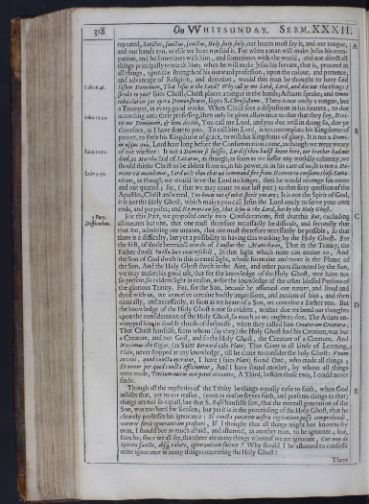 318
On VVWhitsunday.
Serm. XXXII.
repeated, Sanctus, sanctus, sanctus, Holy, holy, holy; our hearts must say it, and our tongue,
318
On VVWhitsunday.
Serm. XXXII.
repeated, Sanctus, sanctus, sanctus, Holy, holy, holy; our hearts must say it, and our tongue,
and our hands too, or else we have not said it. For when a man will make Jesus his com-
panion, and be sometimes with him, and sometimes with the world, and not direct all
things principally towards him; when he will make Jesus his servant, that is, proceed in
all things, upon the strength of his outward profession, upon the colour, and pretence,
and advantage of Religion, and devotion, would this man be thought to have said
Iesum Dominum, Luke 6.46. That Iesus is the Lord? Why call ye me Lord, Lord, and doe not the things I
speake to you? saies Christ; Christ places a tongue in the hands; Actions speake; and Omni
tuba clarior per opera Demonstratio, sayes S. Chrysostome, There is not onely a tongue, but
a Trumpet, in every good worke. When Christ sees a disposition in his hearers, to doe
according unto their professing, Iohn 13.14. then only he gives allowance to that that they say, Dici-
tis me Dominum, & bene dicitis, You call me Lord, and you doe well in doing so, doe ye
therefore, as I have done to you. To call him Lord, is to contemplate his Kingdome of
power, to feele his Kingdome of grace, to wish his Kingdome of glory. It is not a Domi-
ne usque quò, Lord how long before the Consummation come, as though we were weary
of our warfare: Iohn 11.21. It notIt is not a Domine si fuisses, Lord if thou hadst beene here, our brother had not
died, as Martha said of Lazarus, as though, as soon as we suffer any worldly calamity, we
should thinke Christ to be absent from us, in his power, or in his care of us; It is not a Do-
mine vis mandemus, Luke 9.54. Lord wilt thou that we command fire from Heaven to consume these Sama-
ritans, as though we would serve the Lord no longer, then he would revenge his owne
and our quarrel; for, (that we may come to our last part) to that fiery question of the
Apostles, Christ answered, You know not of what spirit you are; It is not the Spirit of God,
it is not the Holy Ghost, which makes you call Jesus the Lord onely to serve your own
ends, and purposes; and No man can say, that Iesus is the Lord, but by the Holy Ghost. For this Part, 3 Part.
Difficultas. we proposed onely two Considerations, first that this But, excluding
all meanes but one, that one must therefore necessarily be difficult, and secondly that
that But, admitting one meanes, that one must therefore necessarily be possible; so that
there is a difficulty, but yet a possibility in having this working by the Holy Ghost. For
the first, of those hereticall words of Faustus the Manichæan, That in the Trinity, the
Father dwelt In illa luce inaccessibili, In that light which none can attaine to, And
the Son of God dwelt in this created light, whose fountaine and roote is the Planet of
the Sun, And the Holy Ghost dwelt in the Aire, and other parts illumined by the Sun,
we may make this good use, that for the knowledge of the Holy Ghost, wee have not
so present, so evident light in reason, as for the knowledge of the other blessed Persons of
the glorious Trinity. For, for the Son, because he assumed our nature, and lived and
dyed with us, we conceive certaine bodily impressions, and notions of him; and then
naturally, and necessarily, as soon as we heare of a Son, we conceive a Father too. But
the knowledge of the Holy Ghost is not so evident, neither doe we bend our thoughts
upon the consideration of the Holy Ghost, so much as we ought to doe. The Arians en-
wrapped him in double clouds of darknesse, when they called him Creaturam Creaturæ;
That Christ himselfe, from whom (say they) the Holy Ghost had his Creation, was but
a Creature, and not God, and so the Holy Ghost, the Creature of a Creature. And
Maximus ille Gigas, (as Saint Bernard cals Plato) That Giant in all kinde of Learning,
Plato, never stopped at any knowledge, till he came to consider the holy Ghost: Vnum
inveni, quod cuncta operatur, I have (saies Plato) found One, who made all things;
Et unum per quod cuncta efficiuntur, And I have found another, by whom all things
were made; Tertium autem non potui invenire, A Third, besides those two, I could never
finde. Though all the mysteries of the Trinity be things equally easie to faith, when God
infuses that, yet to our reason, (even as reason serves faith, and presents things to that)
things are not so equall, but that S. Basil himselfe saw, that the eternall generation of the
Son, was too hard for Reason; but yet it is in the proceeding of the Holy Ghost, that he
clearely professes his ignorance: Si cuncta putarem nostra cogitatione posse comprehendi,
vererer fortè ignorantiam profiteri, If I thought that all things might bee knowne by
man, I should bee as much afraid, and ashamed, as another man, to be ignorant; but,
saies he, since we all see, that there are many things whereof we are ignorant, Cur non de
Spiritu sancto, absabsque rubore, ignorantiam faterer? Why should I be ashamed to confesse
mine ignorance in many things concerning the Holy Ghost? There
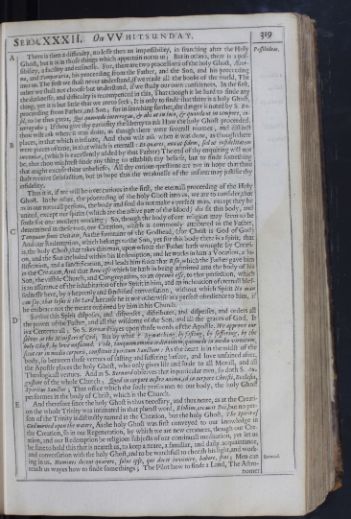 Serm. XXXII.
On VVWhitsunday.
319There is then a difficulty, no lesse then an impossibility, Possibilitas. in searching after the Holy
Serm. XXXII.
On VVWhitsunday.
319There is then a difficulty, no lesse then an impossibility, Possibilitas. in searching after the Holy
Ghost, but it is in those things which appertain not to us; But in others, there is a pos-
sibility, a facility and easinesse. For, there are two processions of the holy Ghost, Æter-
na, and Temporaria, his proceeding from the Father, and the Son, and his proceeding
into us. The first we shall never understand, if we reade all the books of the world, The
other we shall not choose but understand, if we study our own consciences. In the first,
the darknesse, and difficulty is recompenced in this, That though it be hard to finde any
thing, yet it is but little that we are to seek; It is only to finde that there is a holy Ghost,
proceeding from Father, and Son; for in searching farther, the danger is noted by S. Ba-
sil, to be thus great, Qui quomodo interrogas, & ubi ut in loco, & quando ut in tempore, in-
terrogabis; If thou give thy curiosity the liberty to ask How the holy Ghost proceeded,
thou wilt ask where it was done, as though there were severall roomes, and distinct
places, in that which is infinite, And thou wilt ask when it was done, as though there
were pieces of time, in that which is eternall: Et quæres, non ut fidem, sed ut infidelitatem
invenias, (which is excellently added by that Father) The end of thy enquiring will not
be, that thou mightest finde any thing to establish thy beliefe, but to finde something
that might excuse thine unbeliefe; All thy curious questions are not in hope that thou
shalt receive satisfaction, but in hope that the weaknesse of the answer may justifie thy
infidelity. Thus it is, if we will be over curious in the first, the eternall proceeding of the Holy
Ghost. In the other, the proceeding of the holy Ghost into us, we are to consider, that
as in our naturall persons, the body and soul do not make a perfect man, except they be
united, except our spirits (which are the active part of the blood) do fit this body, and
soule for one anothers working; So, though the body of our religion may seem to be
determined in these two, our Creation, which is commonly attributed to the Father,
Tanquam fonti Deitatis, As the fountaine of the Godhead, (for Christ is God of God)
And our Redemption, which belongs to the Son, yet for this body there is a spirit, that
is, the holy Ghost, that takes this man, upon whom the Father hath wrought by Creati-
on, and the Son included within his Redemption, and he works in him a Vocation, a Ju-
stification, and a sanctification, and leads him from that Esse, which the Father gave him
in the Creation, And that Bene esse which he hath in being admitted into the body of his
Son, the visible Church, and Congregation, to an Optimè esse, to that perfection, which
is an assurance of the inhabitation of this Spirit in him, and an inchoation of eternall bles-
sednesse here, by a heavenly and sanctified conversation, without which Spirit No man
can say, that Iesus is the Lord, because he is not otherwise in a perfect obedience to him, if
he embrace not the means ordained by him in his Church. So that this Spirit disposes, and dispenses, distributes, and disperses, and orders all
the power of the Father, and all the wisdome of the Son, and all the graces of God. It
is a Center to all; So S. Bernard sayes upon those words of the Apostle, We approve our
selves as the Ministers of God; But by what? By watching, by fasting, by suffering, by the
holy Ghost, by love unfained. Vide, tanquam omnia ordinantem, quomodo in medio virtutum,
sicut cor in medio corporis, constituit Spiritum Sanctum: As the heart is in the midst of the
body, so between these vertues of fasting and suffering before, and love unfained after,
the Apostle places the holy Ghost, who only gives life and soule to all Morall, and all
Theologicall vertues. And as S. Bernard observes that in particular men, so doth S. Au-
gustine of the whole Church; Quod in corpore nostro anima, id in corpore Christi, Ecclesia,
Spiritus Sanctus; That office which the soule performes to our body, the holy Ghost
performes in the body of Christ, which is the Church. And therefore since the holy Ghost is thus necessary, and thus neare, as at the Creati-
on the whole Trinity was intimated in that plurall word, Elohim, creavit Dii, but no per-
son of the Trinity is distinctly named in the Creation, but the holy Ghost, The Spirit of
God moved upon the waters, As the holy Ghost was first conveyed to our knowledge in
the Creation, so in our Regeneration, by which we are new creatures, though our Cre-
ation, and our Redemption be religious subjects of our continuall meditation, yet let us
be sure to hold this that is nearest us, to keep a neare, a familiar, and daily acquaintance,
and conversation with the holy Ghost, and to be watchfull to cherish his light, and work-
ing in us. Homines docent quærere, solus ipse, qui docet invenire, habere, frui;Bernard. Men can
teach us wayes how to finde somethings; The Pilot how to finde a Land, The Astro-
nomer
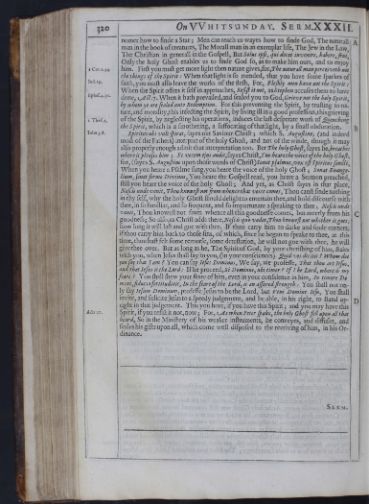 320
On VVWhitsunday.
Serm. XXXII.
nomer how to finde a Star; Men can teach us wayes how to finde God, The naturall
320
On VVWhitsunday.
Serm. XXXII.
nomer how to finde a Star; Men can teach us wayes how to finde God, The naturall
man in the book of creatures, The Morall man in an exemplar life, The Jew in the Law,
The Christian in generall in the Gospell, But Solus ipse, qui docet invenire, habere, frui,
Only the holy Ghost enables us to finde God so, as to make him ours, and to enjoy
him.1 Cor. 2.14. First you must get more light then nature gives, for, The naturall man perceiveth not
the things of the Spirit: When that light is so mended, that you have some sparkes of
faith, Iud. 19. you must also leave the works of the flesh, For, Fleshly men have not the Spirit:
When the Spirit offers it self in approaches, Resist it not, as Stephen accuses them to have
done, Ephes. 4.30. Act. 7. When it hath prevailed, and sealed you to God, Grieve not the holy Spirit,
by whom ye are sealed unto Redemption. For this preventing the Spirit, by trusting to na-
ture, and morality, this infecting the Spirit, by living ill in a good profession, this grieving
of the Spirit, 1 Thes. 5. by neglecting his operations, induces the last desperate work of Quenching
the Spirit, which is a smothering, a suffocating of that light, by a finall obduration. Spiritus ubi vult spirat, Iohn 3.8. sayes our Saviour Christ; which S. Augustine, (and indeed
most of the Fathers) interpret of the holy Ghost, and not of the winde, though it may
also properly enough admit that interpretation too. But The holy Ghost, sayes he, breathes
where it pleases him; Et vocem ejus audis, sayes Christ, You heare the voice of the holy Ghost;
for, (sayes S. Augustine upon those words of Christ) Sonat psalmus, vox est Spiritus sancti,
When you heare a Psalme sung, you heare the voice of the holy Ghost; Sonat Euange-
lium, sonat sermo Divinus, You heare the Gospell read, you heare a Sermon preached,
still you heare the voice of the holy Ghost; And yet, as Christ sayes in that place,
Nescis unde venit, Thou knowest not from whence that voice comes, Thou canst finde nothing
in thy self, why the holy Ghost should delight to entertain thee, and hold discourse with
thee, in so familiar, and so frequent, and so importunate a speaking to thee; Nescis unde
venit, Thou knowest not from whence all this goodnesse comes, but meerly from his
goodness; So also, as Christ adds there, Nescis quò vadat, Thou knowest not whither it goes,
how long it will last and goe with thee. If thou carry him to darke and foule corners,
if thou carry him back to those sins, of which, since he began to speake to thee, at this
time, thou hast felt some remorse, some detestation, he will not goe with thee, he will
give thee over. But as long as he, The Spirit of God, by your cherishing of him, staies
with you, when Jesus shall say to you, (in your consciences) Quid vos dicitis? Whom doe
you say that I am? You can say Iesus Dominus, We say, we professe, That thou art Iesus,
and that Iesus is the Lord: If he proceed, Si Dominus, ubi timor? If I be Lord, where is my
feare? You shall shew your feare of him, even in your confidence in him, In timore Do-
mini, fiducia fortitudinis, In the feare of the Lord, is an assured strength: You shall not on-
ly say Iesum Dominum, professe Jesus to be the Lord, but Veni Domine Iesu, You shall
invite, and solicite Jesus to a speedy judgement, and be able, in his right, to stand up-
right in that judgement. This you have, if you have this Spirit; and you may have this
Spirit, Acts 10. if you resist it not, now; For, As when Peter spake, the holy Ghost fell upon all that
heard, So in the Ministery of his weaker instruments, he conveyes, and diffuses, and
seales his gifts upon all, which come well disposed to the receiving of him, in his Or-
dinance. Serm.
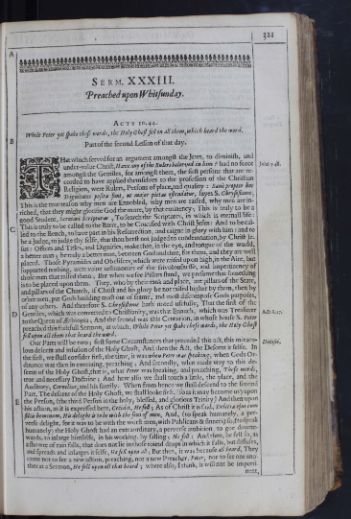 321
321
Serm. XXXIII.
Preached upon Whitsunday.
Acts 10.44.
While Peter yet spake these words, the Holy Ghost fell on all them, which heard the word.
Part of the second Lesson of that day. THatThat which served for an argument amongst the Jews, to diminish, and
under-value Christ, Have any of the Rulers beleeved in him?John 7.48. had no force
amongst the Gentiles, for amongst them, the first persons that are re-
corded to have applied themselves to the profession of the Christian
Religion, were Rulers, Persons of place, and quality: Sanè propter hoc
Dignitates positæ sunt, ut major pietas ostendatur, sayes S. Chrysostome,
This is the true reason why men are Ennobled, why men are raised, why men are in-
riched, that they might glorifie God the more, by that eminency; This is truly to be a
good Student, Scrutari Scripturas, To search the Scriptures, in which is eternall life:
This is truly to be called to the Barre, to be Crucified with Christ Jesus: And to be cal-
led to the Bench, to have part in his Resurrection, and raigne in glory with him: and to
be a Judge, to judge thy selfe, that thou beest not judged to condemnation, by Christ Je-
sus: Offices and Titles, and Dignities, make thee, in the eye, and tongue of the world,
a better man; be truly a better man, between God and thee, for them, and they are well
placed. Those Pyramides and Obelisces, which were raised up on high, in the Aire, but
supported nothing, were vaine testimonies of the frivolousnesse, and impertinency of
those men that raised them; But when we see Pillars stand, we presume that something
is to be placed upon them. They, who by their rank and place, are pillars of the State,
and pillars of the Church, if Christ and his glory be not raised higher by them, then by
other men, put Gods building most out of frame, and most discompose Gods purposes,
of any others. And therefore S. Chrysostome hath noted usefully, That the first of the
Gentiles, which was converted to Christianity, was that Eunuch, Acts 8.27. which was Treasurer
to the Queen of Æthiopia; And the second was this Centurion, in whose house S. Peter
preached this fruitfull Sermon, at which, While Peter yet spake these words, the Holy Ghost
fell upon all them that heard the word. Our Parts will be two; first some Circumstances that preceded this act, Divisio. this miracu-
lous descent and infusion of the Holy Ghost, And then the Act, the Descent it selfe. In
the first, we shall consider first, the time, it was when Peter was speaking, when Gods Or-
dinance was then in executing, preaching; And secondly, what made way to this de-
scent of the Holy Ghost, that is, what Peter was speaking, and preaching, These words,
true and necessary Doctrine; And here also we shall touch a little, the place, and the
Auditory, Cornelius, and his family. When from hence we shall descend to the second
Part, The descent of the Holy Ghost, we shall looke first, (so as it may become us) upon
the Person, (the third Person in the holy, blessed, and glorious Trinity) And then upon
his action, as it is expressed here, Cecidit, He fell; As of Christ it is said, Deliciæ ejus cum
filiis hominum, His delight is to be with the sons of men, And, (to speak humanely, a per-
verse delight, for it was to be with the worst men, with Publicans & sinners) so, (to speak
humanely) the Holy Ghost had an extraordinary, a perverse ambition, to goe downe-
wards, to inlarge himselfe, in his working, by falling; He fell: And then, he fell so, as
a showre of rain falls, that does not lie in those round drops in which it falls, but diffuses,
and spreads and inlarges it selfe, He fell upon all; But then, it was because all heard, They
came not to see a new action, preaching, not a new Preacher, Peter, nor to see one ano-
ther at a Sermon, He fell upon all that heard; where also, I think, it will not be imperti-
nent,
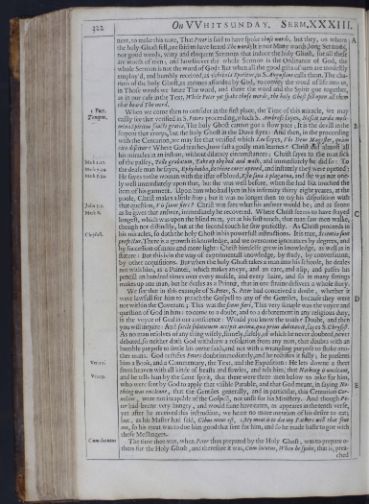 322
On VVWhitsunday.
Serm. XXXIII.
nent, to make this note, That Peter is said to have spoke those words, but they, on whom
322
On VVWhitsunday.
Serm. XXXIII.
nent, to make this note, That Peter is said to have spoke those words, but they, on whom
the holy Ghost fell, are said to have heard The word; It is not Many words, long Sermons,
nor good words, witty and eloquent Sermons that induce the holy Ghost, for all these
are words of men; and howsoever the whole Sermon is the Ordinance of God, the
whole Sermon is not the word of God: But when all the good gifts of men are modestly
employ'd, and humbly received, as vehicula Spiritus, as S. Augustine calls them, The cha-
riots of the holy Ghost, as meanes afforded by God, to convey the word of life into us,
in Those words we heare The word, and there the word and the Spirit goe together,
as in our case in the Text, While Peter yet spake those words, the holy Ghost fell upon all them
that heard The word. When we come then to consider in the first place, the Time of this miracle, we may 1 Part.
Tempus.
easily see that verified in S. Peters proceeding, which S. Ambrose sayes, Nescit tarda moli-
mina Spiritus sancti gratia, The holy Ghost cannot goe a slow pace; It is the devill in the
serpent that creeps, but the holy Ghost in the Dove flyes: And then, in the proceeding
with the Centurion, we may see that verified which Leo sayes, Vbi Deus Magister, quàm
citò discitur? Where God teaches, how fast a godly man learnes? Christ did almost all
his miracles in an instant, without dilatory circumstances; Christ sayes to the man sick
of the palsey, Mark 2.11. Tolle grabatum, Take up thy bed and walk, and immediately he did so: To
the deafe man he sayes, Mark 7.34. Ephphatha, Be thine eares opened, and instantly they were opened:
He sayes to the woman with the issue of bloud, Mark 5.34. Esto sana à plagatua, and she was not one-
ly well immediately upon that, but she was well before, when she had but touched the
hem of his garment. Upon him who had lyen in his infirmity thirty eight yeares, at the
poole, Christ makes a little stop; but it was no longer then to try his disposition with
that question, John 5.5. Vis sanus fieri? Christ was sure what his answer would be; and as soone
as he gives that answer, immediately he recovered. Mark 8. Where Christ seems to have stayed
longest, which was upon the blind man, yet at his first touch, that man saw men walke,
though not distinctly, but at the second touch he saw perfectly. As Christ proceeds in
his miracles, Chrysost. so doth the holy Ghost in his powerfull instructions. It is true, Scientiæ sunt
profectus, There is a growth in knowledge, and we overcome ignorances by degrees, and
by succession of more and more light: Christ himselfe grew in knowledge, as well as in
stature: But this is in the way of experimentall knowledge, by study, by conversation,
by other acquisitions. But when the holy Ghost takes a man into his schoole, he deales
not with him, as a Painter, which makes an eye, and an eare, and a lip, and passes his
pencill an hundred times over every muscle, and every haire, and so in many sittings
makes up one man, but he deales as a Printer, that in one straine delivers a whole story. We see that in this example of S. Peter, S. Peter had conceived a doubt, whether it
were lawfull for him to preach the Gospell to any of the Gentiles, because they were
not within the Covenant; This was the sanus fieri, This very scruple was the voyce and
question of God in him: to come to a doubt, and to a debatement in any religious duty,
is the voyce of God in our conscience: Would you know the truth? Doubt, and then
you will inquire: And facile solutionem accipit anima, quæ prius dubitavit, sayes S. Chrysost.
As no man resolves of any thing wisely, firmely, safely, of which he never doubted, never
debated, so neither doth God withdraw a resolution from any man, that doubts with an
humble purpose to settle his owne faith, and not with a wrangling purpose to shake ano-
ther mans. God rectifies Peters doubt immediately, and he rectifies it fully; he presents
him a Book, Ver. 11. and a Commentary, the Text, and the Exposition: He lets downe a sheet
from heaven with all kinde of beasts and fowles, and tels him, that Nothing is uncleane,
and he tells him by the same spirit, Ver. 19. that there were three men below to aske for him,
who were sent by God to apply that visible Parable, and that God meant, in saying No-
thing was uncleane, that the Gentiles generally, and in particular, this Centurion Cor-
nelius, were not incapable of the Gospell, nor unfit for his Ministery. And though Pe-
ter had beene very hungry, and would faine have eaten, as appeares in the tenth verse,
yet after he received this instruction, we heare no more mention of his desire to eat;
but, as his Master had said, Cibus meus est, My meat is to doe my Fathers will that sent
me, so his meat was to doe him good that sent for him, and so he made haste to goe with
those Messengers. The time then was, Cum locutus when Peter thus prepared by the Holy Ghost, was to prepare o-
thers for the Holy Ghost, and therefore it was, Cum locutus, When he spoke, that is, prea-
ched
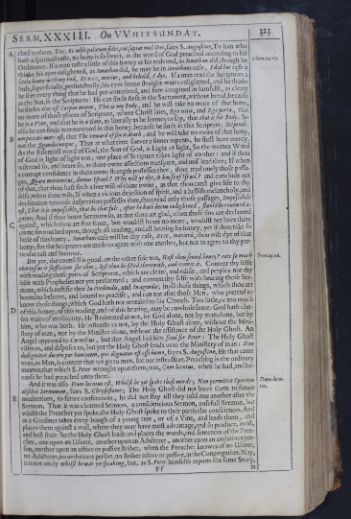 Serm. XXXIII.
On VVWhitsunday.
323
ched to them. For, Si adsit palatum fidei, cui sapiat mel Dei, saies S. Augustine, To him who
Serm. XXXIII.
On VVWhitsunday.
323
ched to them. For, Si adsit palatum fidei, cui sapiat mel Dei, saies S. Augustine, To him who
hath a spirituall taste, no hony is so sweet, as the word of God preached according to his
Ordinance. If a man taste a little of this honey at his rods end, as Ionathan did, 1 Sam. 14.27. though he
thinke his eyes enlightned, as Ionathan did, he may be in Ionathans case, I did but taste a
little honey with my rod, Et ecce, morior, and behold, I dye. If a man read the Scriptures a
little, superficially, perfunctorily, his eyes seeme straight-waies enlightned, and he thinks
he sees every thing that he had pre-conceived, and fore-imagined in himselfe, as cleare
as the Sun, in the Scriptures: He can finde flesh in the Sacrament, without bread, because
he findes Hoc est Corpus meum, This is my Body, and he will take no more of that hony,
no more of those places of Scripture, where Christ saies, Ego vitis, and Ego porta, that
he is a Vine, and that he is a Gate, as literally as he seemes to say, that that is his Body. So
also he can finde wormewood in this honey, because he finds in this Scripture, Stipendi-
um peccati mors est, that The reward of sin is death, and he will take no more of that hony,
not the Quandocunque, That at what time soever a sinner repents, he shall have mercy.
As the Essentiall word of God, the Son of God, is Light of light, So the written Word
of God is light of light too, one place of Scripture takes light of another: and if thou
wilt read so, and heare so, as thine owne affections transport, and mis-lead thee; If when
a corrupt confidence in thine owne strength possesses thee, thou read onely those passa-
ges, Quare moriemini, domus Israel? Why will ye dye, O house of Israel? and conclude out
of that, that thou hast such a free will of thine owne, as that thou canst give life to thy
selfe, when thou wilt; If when a vicious dejection of spirit, and a hellish melancholy, and
declination towards desperation possesses thee, thou read only those passages, Impossibile
est, That it is impossible, that he that fals, after he hath beene enlightned, should be renewed a-
gaine; And if thou heare Sermons so, as that thou art glad, when those sins are declamed
against, which thou art free from, but wouldst heare no more, wouldst not have thine
owne sin touched upon, though all reading, and all hearing be honey, yet if thou take so
little of this honey, Ionathans case will be thy case, Ecce, morieris, thou wilt dye of that
hony; for the Scriptures are made to agree with one another, but not to agree to thy par-
ticular tast and humour. But yet, the counsell is good, on the other side too, Hast thou found honey?Prov. 25.16. eate so much
thereof as is sufficient for thee, lest thou be filled therewith, and vomit it. Content thy selfe
with reading those parts of Scriptures, which are cleare, and edifie, and perplex not thy
selfe with Prophesies not yet performed; and content thy selfe with hearing those Ser-
mons, which rectifie thee In credendis, and In agendis, in all those things, which thou art
bound to beleeve, and bound to practise, and run not after those Men, who pretend to
know those things, which God hath not revealed to his Church. Too little, or too much
of this honey, of this reading, and of this hearing, may be unwholesome: God hath cho-
sen waies of mediocrity; He Redeemed us not, by God alone, nor by man alone, but by
him, who was both. He instructs us not, by the Holy Ghost alone, without the Mini-
stery of man, nor by the Minister alone, without the assistance of the Holy Ghost. An
Angel appeared to Cornelius, but that Angel bid him send for Peter: The Holy Ghost
visits us, and disposes us, but yet the Holy Ghost sends us to the Ministery of man: Non
dedignatur docere per hominem, qui dignatus est esse homo, sayes S. Augustine; He that came
to us, as Man, is content that we go to men, for our instruction. Preaching is the ordinary
meanes; that which S. Peter wrought upon them, was, Cum locutus, when he had, and be-
cause he had preached unto them. And it was also Dum locutus est, Whilst he yet spake those words;Dum locu-
tus. Non permittit Spiritus
absolvi Sermonem, saies S. Chrysostome; The Holy Ghost did not leave them to future
meditations, to future conferences, he did not stay till they told one another after the
Sermon, That it was a learned Sermon, a consciencious Sermon, a usefull Sermon, but
whilst the Preacher yet spoke, the Holy Ghost spoke to their particular consciences. And
as a Gardiner takes every bough of a young tree, or of a Vine, and leads them, and
places them against a wall, where they may have most advantage, and so produce, most,
and best fruit: So the Holy Ghost leads and places the words, and sentences of the Prea-
cher, one upon an Usurer, another upon an Adulterer, another upon an ambitious per-
son, another upon an active or passive Briber, when the Preacher knowes of no Usurer,
no Adulterer, no ambitious person, no Briber active or passive, in the Congregation. Nay,
it is not onely whilst he was yet speaking, but, as S. Peter himselfe reports the same Story, Ff in
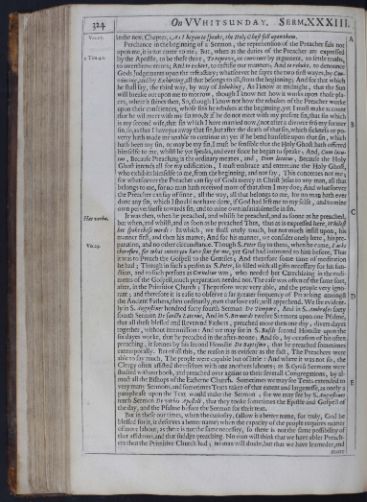 324
On VVWhitsunday.
Serm. XXXIII.
in the next Chapter, Ver. 15. As I began to speake, the Holy Ghost fell upon them.
Perchance in the beginning of a Sermon, the reprehension of the Preacher fals not
324
On VVWhitsunday.
Serm. XXXIII.
in the next Chapter, Ver. 15. As I began to speake, the Holy Ghost fell upon them.
Perchance in the beginning of a Sermon, the reprehension of the Preacher fals not
upon me, it is not come to me; But, when as the duties of the Preacher are expressed
by the Apostle, 2 Tim. 4.2. to be these three, To reprove, or convince by argument, to settle truths,
to overthrow errors; And to exhort, to rectifie our manners; And to rebuke, to denounce
Gods Judgements upon the refractary; whatsoever he sayes the two first wayes, by Con-
vincing, and by Exhorting, all that belongs to all, from the beginning; And for that which
he shall say, the third way, by way of Rebuking, As I know at midnight, that the Sun
will breake out upon me to morrow, though I know not how it works upon those pla-
ces, where it shines then, So, though I know not how the rebukes of the Preacher worke
upon their consciences, whose sins he rebukes at the beginning, yet I must make account
that he wil meet with my sin too; & if he do not meet with my present sin, that sin which
is my second wife, that sin which I have married now, (not after a divorce frōfrom my former
sin, so, as that I have put away that sin, but after the death of that sin, which sickness or po-
verty hath made me unable to continue in) yet if he bend himselfe upon that sin, which
hath been my sin, or may be my sin, I must be sensible that the Holy Ghost hath offered
himselfe to me, whilst he yet speaks, and ever since he began to speake; And, Cum locu-
tus, Because Preaching is the ordinary meanes, and, Dum locutus, Because the Holy
Ghost intends all for my edification, I must embrace and entertaine the Holy Ghost,
who exhibits himselfe to me, from the beginning, and not say, This concernes not me;
for whatsoever the Preacher can say of Gods mercy in Christ Jesus to any man, all that
belongs to me, for no man hath received more of that, then I may doe; And whatsoever
the Preacher can say of sinne, all the way, all that belongs to me, for no man hath ever
done any sin, which I should not have done, if God had left me to my selfe, and to mine
own perversnesse towards sin, and to mine own insatiablenesse in sin. It was then, Hæc verba. when he preached, and whilst he preached, and as soone as he preached,
but when, and whilst, and as soon as he preached Thus, thus as is expressed here, Whilest
hee spake these words: In which, we shall onely touch, but not much insist upon, his
manner first, and then his matter; And for his manner, we consider onely here, his pre-
paration, Ver. 29. and no other circumstance. Though S. Peter say to them, when he came, I aske
therefore, for what intent you have sent for me, yet God had intimated to him before, That
it was to Preach the Gospell to the Gentiles; And therefore some time of meditation
he had; Though in such a person as S. Peter, so filled with all gifts necessary for his fun-
ction, and to such persons as Cornelius was, who needed but Catechizing in the rudi-
ments of the Gospell, much preparation needed not. The case was often of the same sort,
after, in the Primitive Church; The persons were very able, and the people very igno-
rant; and therefore it is easie to observe a far greater frequency of Preaching amongst
the Ancient Fathers, then ordinarily, men that love ease, will apprehend. We see evident-
ly in S. Augustines hundred forty fourth Sermon De Tempore, And in S. Ambroses forty
fourth Sermon De sancto Latrone, And in S. Bernards twelve Sermons upon one Psalme,
that all these blessed and Reverend Fathers, preached more then one day, divers dayes
together, without intermission: And we may see in S. Basils second Homilie upon the
six dayes worke, that he preached in the after-noone; And so, by occasion of his often
preaching, it seemes by his second Homilie De Baptismo, that he preached sometimes
extemporally. But of all this, the reason is as evident as the fact, The Preachers were
able to say much, The people were capable but of little: And where it was not so, the
Clergy often assisted themselves with one anothers labours; as S. Cyrils Sermons were
studied without book, and preached over againe to their severall Congregations, by al-
most all the Bishops of the Easterne Church. Sometimes we may see Texts extended to
very many Sermons, and sometimes Texts taken of that extent and largenesse, as onely a
paraphrase upon the Text would make the Sermon; for we may see by S. Augustines
tenth Sermon De verbis Apostoli, that they tooke sometimes the Epistle and Gospell of
the day, and the Psalme before the Sermon for their text. But in these our times, when the curiosity, (allow it a better name, for truly, God be
blessed for it, it deserves a better name) when the capacity of the people requires matter
of more labour, as there is not the same necessity, so there is not the same possibility of
that assiduous, and that sudden preaching. No man will think that we have abler Preach-
ers then the Primitive Church had; no man will doubt, but that we have learneder, and more
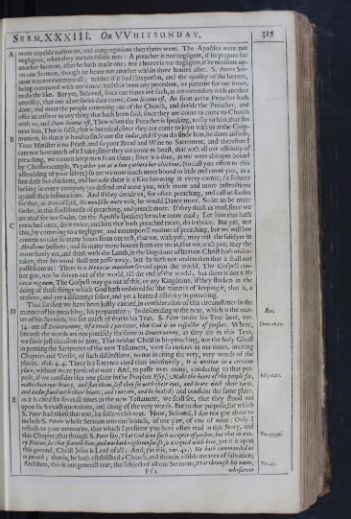 Serm. XXXIII.
On VVWhitsunday.
325
more capable auditories, and congregations then their were. The Apostles were not
Serm. XXXIII.
On VVWhitsunday.
325
more capable auditories, and congregations then their were. The Apostles were not
negligent, when they mended their nets: A preacher is not negligent, if he prepare for
another Sermon, after he hath made one; nor a hearer is not negligent, if he meditate up-
on one Sermon, though he heare not another within three houres after. S. Peters Ser-
mon was not extemporall; neither if it had (his person, and the quality of the hearers,
being compared with our times) had that been any precedent, or patterne for our times,
to do the like. But yet, Beloved, since our times are such, as are overtaken with another
necessity, that our adversaries dare come, Cum locutus est, As soon as the Preacher hath
done, and meet the people comming out of the Church, and deride the Preacher, and
offer an answer to any thing that hath been said; since they are come to come to Church
with us, and Dum locutus est, Then when the Preacher is speaking, to say to him, that sits
next him, That is false, that is heretical; since they are come to joyn with us at the Com-
munion, so that it is hard to finde out the Iudas, and if you do finde him, he dares answer,
Your Minister is no Priest, and so your Bread and Wine no Sacrament, and therefore I
care not how much of it I take; since they are come to boast, that with all our assiduity of
preaching, we cannot keep men from them; since it is thus, as we were alwayes bound
by Christs example, To gather you as a hen gathers her chickens, (to call you often to this
assembling of your selves) so are we now much more bound to hide and cover you, as a
hen doth her chickens, and because there is a Kite hovering in every corner, (a seducer
lurking in every company) to defend and arme you, with more and more instructions
against their insinuations. And if they deride us, for often preaching, and call us fooles
for that, as David said, He would be more vile, he would Dance more, So let us be more
fooles, in this foolishnesse of preaching, and preach more. If they think us mad, since we
are mad for our soules, (as the Apostle speakes) let us be more mad; Let him that hath
preached once, do it twice, and him that hath preached twice, do it thrice. But yet, not
this, by comming to a negligent, and extemporall manner of preaching, but we will bee
content to take so many hours from our rest, that we, with you, may rest the safelyer in
Abrahams bosome, and so many more houres from our meat, that we, with you, may the
more surely eat, and drink with the Lamb, in the kingdome of heaven. Christ hath under-
taken, that his word shall not passe away, but he hath not undertaken that it shall not
passe from us: There is a Ne exeas munaum served upon the world, The Gospell can-
not goe, nor be driven out of the world, till the end of the world; but there is not a Ne
exeas regnum, The Gospell may go out of this, or any Kingdome, if they flacken in the
doing of those things which God hath ordained for the meanes of keeping it, that is, a
zealous, and yet a discreet; a sober, and yet a learned assiduity in preaching.
Thus far then we have been justly carried, in consideration of this circumstance in the
manner of his preaching, his preparation; In descending to the next, which is the mat-
ter of his Sermon, we see much of that in his Text. S. Peter tooke his Text here, Res. ver.
34. out of Deuteronomy, of a truth I perceive, that God is no respecter of persons. Where,
Deut. 10.17. because the words are not precisely the same in Deuteronomy, as they are in this Text,
we finde just occasion to note, That neither Christ in his preaching, nor the holy Ghost
in penning the Scriptures of the new Testament, were so curious as our times, in citing
Chapters and Verses, or such distinctions, no nor in citing the very, very words of the
places. Heb. 4.4. There is a sentence cited thus indefinitely, It is written in a certaine
place, without more particular note: And, to passe over many, conducing to that pur-
pose, if we consider that one place in the Prophet Esay, (Make the heart of this people fat,
Esay 6.20. make their eyes heavy, and shut them, lest they see with their eyes, and heare with their eares,
and understand with their hearts, and convert, and be healed) and consider the same place,
as it is cited six severall times in the new Testament, we shall see, that they stood not
upon such exact quotations, and citing of the very words. But to that purpose, for which
S. Peter had taken that text, he follows his text. Now, Beloved, I doe not goe about to
include S. Peters whole Sermon into one branch, of one part, of one of mine: Only I
refresh to your memories, that which I presume you have often read in this Story, and
this Chapter, that though S. Peter say, That God is no such accepter of persons,Ver. 35.36. but that in eve-
ry Nation, he that feareth him, and worketh righteousnesse, is accepted with him, yet it is upon
this ground, Christ Jesus is Lord of all; And, (as it is, ver. 42.) He hath commanded us
to preach; that is, he hath established a Church, and therein, visible meanes of salvation;
And then, this is our generall text, the subject of all our Sermons, That through his name, Ver. 43 Ff2 whosoever
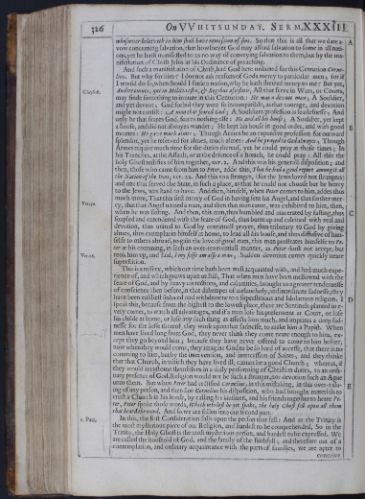 326
On VVWhitsunday.
Serm. XXXIII.
whosoever beleeveth in him shall have remission of sins. So that this is all that we dare a-
326
On VVWhitsunday.
Serm. XXXIII.
whosoever beleeveth in him shall have remission of sins. So that this is all that we dare a-vow concerning salvation, that howsoever God may afford salvation to some in all nati-
ons, yet he hath manifested to us no way of conveying salvation to them, but by the ma-
nifestation of Christ Jesus in his Ordinance of preaching. And such a manifestation of Christ, had God here ordained for this Centurion Corne-
lius. But why for him? I doe not ask reasons of Gods mercy to particular men, for if
I would do so, when should I finde a reason, why he hath shewed mercy to me? But yet,
Audite omnes,Chrysost. qui in Militia estis, & Regibus assistitis, All that serve in Wars, or Courts,
may finde something to imitate in this Centurion: He was a devout man; A Souldier,
and yet devout; God forbid they were so incompatible, as that courage, and devotion
might not consist: A man that feared God; A Souldiers profession is fearlesnesse; And
only he that feares God, feares nothing else: He and all his house; A Souldier, yet kept
a house, and did not alwayes wander; He kept his house in good order, and with good
meanes: He gave much almes; Though Armes be an expensive profession for outward
splendor, yet he reserved for almes, much almes: And he prayed to God alwayes; Though
Armes require much time for the duties thereof, yet he could pray at those times; In
his Trenches, at the Assault, or at the defence of a Breach, he could pray: All this the
holy Ghost testifies of him together, ver. 2. And this was his generall disposition; and
then, those who came from him to Peter, adde this, That he had a good report amongst all
the Nation of the Iews, ver. 22. And this to a stranger, (for the Jews loved not strangers)
and one that served the State, in such a place, as that he could not choose but be heavy
to the Jews, was hard to have. And then, himself, when Peter comes to him, addes thus
much more, That this first mercy of God in having sent his Angel, and that farther mer-
cy, that that Angel named a man, and then that man came, was exhibited to him, then, Ver. 30.
when he was fasting. And then, this man, thus humbled and macerated by fasting, thus
soupled and entendered with the feare of God, thus burnt up and calcined with zeal and
devotion, thus united to God by continuall prayer, thus tributary to God by giving
almes, thus exemplar in himself at home, to lead all his house, and thus diffusive of him-
selfe to others abroad, to gain the love of good men, this man prostrates himselfe to Pe-
ter at his comming, in such an over-reverentiall manner, as Peter durst not accept, but
took him up, Ver. 26. and said, I my selfe am also a man; Sudden devotion comes quickly neare
superstition. This is a misery, which our time hath been well acquainted with, and had much expe-
rience of, and which grows upon us still, That when men have been mellowed with the
feare of God, and by heavy corrections, and calamities, brought to a greater tendernesse
of conscience then before, in that distemper of melancholy, and inordinate sadnesse, they
have been easiliest seduced and withdrawne to a superstitious and Idolatrous religion. I
speak this, because from the highest to the lowest place, there are Sentinels planted in e-
very corner, to watch all advantages, and if a man lose his preferment at Court, or lose
his childe at home, or lose any such thing as affects him much, and imprints a deep sad-
nesse for the losse thereof, they work upon that sadnesse, to make him a Papist. When
men have lived long from God, they never think they come neare enough to him, ex-
cept they go beyond him; because they have never offered to come to him before,
now when they would come, they imagine God to be so hard of accesse, that there is no
comming to him, but by the intervention, and intercession of Saints; and they thinke
that that Church, in which they have lived ill, cannot be a good Church; whereas, if
they would accustome themselves in a daily performing of Christian duties, to an ordi-
nary presence of God, Religion would not be such a stranger, nor devotion such an Ague
unto them. But when Peter had rectified Cornelius, in this mistaking, in this over-valu-
ing of any person, and then saw Cornelius his disposition, who had brought materials to
erect a Church in his house, by calling his kinsmen, and his friends together to heare Pe-
ter, Peter spoke those words, Which whilest he yet spake, the holy Ghost fell upon all them
that heard the word. And so we are fallen into our second part. In this, 2. Part. the first Consideration falls upon the person that fell: And as the Trinity is
the most mysterious piece of our Religion, and hardest to be comprehended, So in the
Trinity, the Holy Ghost is the most mysterious person, and hardest to be expressed. We
are called the houshold of God, and the family of the faithfull; and therefore out of a
contemplation, and ordinary acquaintance with the parts of families, we are apter to conceive
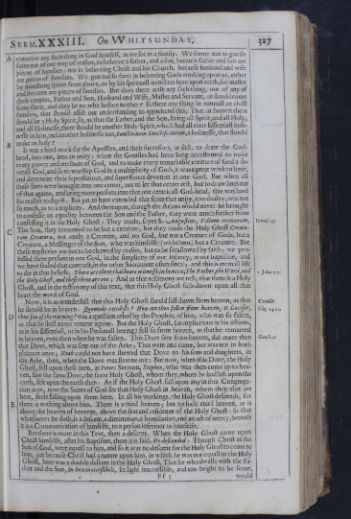 Serm. XXXIII.
On VVWhitsunday.
327
conceive any such thing in God himself, as we see in a family. We seeme not to goe so
Serm. XXXIII.
On VVWhitsunday.
327
conceive any such thing in God himself, as we see in a family. We seeme not to goe so
farre out of our way of reason, to beleeve a father, and a son, because father and son are
pieces of families: nor in beleeving Christ and his Church, because husband and wife
are pieces of families. We goe not so farre in beleeving Gods working upon us, either
by ministring spirits from above, or by his spirituall ministers here upon earth, for master
and servants are pieces of families. But does there arise any such thing, out of any of
these couples, Father and Son, Husband and Wife, Master and Servant, as should come
from them, and they be no whit before neither? Is there any thing in naturall or civill
families, that should assist our understanding to apprehend this, That in heaven there
should be a Holy Spirit, so, as that the Father, and the Son, being all Spirit, and all Holy,
and all Holinesse, there should be another Holy Spirit, which had all their Essentiall holi-
nesse in him, and another holinesse too, Sanctitatem Sanctificantem, a holinesse, that should
make us holy? It was a hard work for the Apostles, and their successors, at first, to draw the God-
head, into one, into an unity: when the Gentiles had been long accustomed to make
every power and attribute of God, and to make every remarkable creature of God a se-
verall God, and so to worship God in a multiplicity of Gods, it was a great work to limit,
and determine their superstitious, and superfluous devotion in one God. But when all
these lines were brought into one center, not to let that center rest, but to draw lines out
of that againe, and bring more persons into that one centricall God-head, this was hard
for reason to digest: But yet to have extended that from that unity, to a duality, was not
so much, as to a triplicity. And thereupon, though the Arians would never be brought
to confesse an equality between the Son and the Father, they were much farther from
confessing it in the Holy Ghost: They made, sayes S. Augustine, Filium creaturam, Hæres. 49.
The Son, they accounted to be but a creature; but they made the Holy Ghost Creatu-
ram Creaturæ, not onely a Creature, and no God, but not a Creature of Gods, but a
Creature, a Messenger of the son, who was himselfe (with them) but a Creature. But
these mysteries are not to be chawed by reason, but to be swallowed by faith; we pro-
fessed three persons in one God, in the simplicity of our infancy, at our baptisme, and
we have sealed that contract, in the other Sacrament often since; and this is eternall life
to die in that beliefe. There are three that beare witnesse in heaven, The Father, the Word,1 John 5.7. and
the Holy Ghost, and these three are one; And in that testimony we rest, that there is a Holy
Ghost, audand in the testimony of this text, that this Holy Ghost falls down upon all that
heare the word of God. Now, it is as wonderfull that this Holy Ghost should fall down from heaven, Cecidit.
Esay 14.12. as that
he should be in heaven. Quomodo cecidisti? How art thou fallen from heaven, O Lucifer,
thou son of the morning? was a question asked by the Prophet, of him, who was so fallen,
as that he shall never returne againe. But the Holy Ghost, (as mysterious in his actions,
as in his Essentiall, or in his Personall beeing) fell so from heaven, as that he remained
in heaven, even then when he was fallen. This Dove sent from heaven, Gen 8.7. did more then
that Dove, which was sent out of the Arke; That went and came, but was not in both
places at once; Noah could not have shewed that Dove to his sons and daughters, in
the Arke, then, when the Dove was flowne out: But now, when this Dove, the Holy
Ghost, fell upon these men, at Peters Sermon, Stephen, who was then come up to hea-
ven, saw the same Dove, the same Holy Ghost, whom they, whom he had left upon the
earth, felt upon the earth then: As if the Holy Ghost fall upon any in this Congrega-
tion now, now the Saints of God see that Holy Ghost in heaven, whom they that are
here, feele falling upon them here. In all his workings, the Holy Ghost descends, for
there is nothing above him. There is a third heaven; but no such third heaven, as is
above the heaven of heavens, above the seat and residence of the Holy Ghost: so that
whatsoever he doth, is a descent, a diminution, a humiliation, and an act of mercy, because
it is a Communication of himselfe, to a person inferiour to himselfe. But there is more in this Text, then a descent. When the Holy Ghost came upon
Christ himselfe, after his Baptisme, there it is said, He descended: Though Christ as the
Son of God, were equall to him, and so it was no descent for the Holy Ghost to come to
him, yet because Christ had a nature upon him, in which he was not equall to the Holy
Ghost, here was a double descent in the Holy Ghost, That he who dwells with the Fa-
ther and the Son, In luce inaccessibili, In light inaccessible, and too bright to be seene, Ff3 would
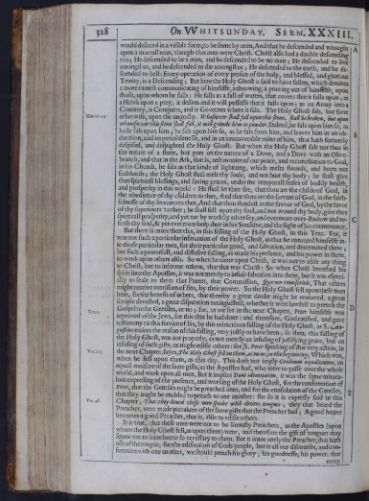 328
On VVWhitsunday.
Serm. XXXIII.
would descend in a visible form, to be seene by men, And that he descended and wrought
328
On VVWhitsunday.
Serm. XXXIII.
would descend in a visible form, to be seene by men, And that he descended and wrought
upon a mortall man, though that man were Christ. Christ also had a double descending
too; He descended to be a man, and he descended to be no man; He descended to live
amongst us, and he descended to die amongst us; He descended to the earth, and he de-
scended to hell: Every operation of every person of the holy, and blessed, and glorious
Trinity, is a Descending; But here the Holy Ghost is said to have fallen, which denotes
a more earnest communicating of himselfe, a throwing, a pouring out of himselfe, upon
those, upon whom he falls: He falls as a fall of waters, that covers that it falls upon; as
a Hawk upon a prey, it desires and it will possesse that it falls upon; as an Army into a
Countrey, it Conquers, and it Governes where it fals. The Holy Ghost fals, but farre
otherwise, Mat. 21.44. upon the ungodly. Whosoever shall fall upon this stone, shall be broken, but upon
whomsoever this stone shall fall, it will grinde him to powder. Indeed, he fals upon him so, as
haile fals upon him; he fals upon him so, as he fals from him, and leaves him in an ob-
duration, and impenitiblenesse, and in an irrecoverable ruine of him, that hath formerly
despised, and despighted the Holy Ghost. But when the Holy Ghost fals not thus in
the nature of a stone, but puts on the nature of a Dove, and a Dove with an Olive-
branch, and that in the Ark, that is, testimonies of our peace, and reconciliation to God,
in his Church, he fals as that kinde of lightning, which melts swords, and hurts not
scabbards; the Holy Ghost shall melt thy soule, and not hurt thy body; he shall give
thee spirituall blessings, and saving graces, under the temporall seales of bodily health,
and prosperity in this world: He shall let thee see, that thou art the childe of God, in
the obedience of thy children to thee, And that thou art the servant of God, in the faith-
fulnesse of thy servants to thee, And that thou standest in the favour of God, by the favor
of thy superiours to thee; he shall fall upon thy soul, and not wound thy body, give thee
spirituall prosperity, and yet not by worldly adversity, and evermore over-shadow and re-
fresh thy soul, & yet evermore keep thee in his Sunshine, and the light of his countenance. But there is more then this, in this falling of the Holy Ghost, in this Text. For, it
was not such a particular insinuation of the Holy Ghost, as that he convaied himselfe in-
to those particular men, for their particular good, and salvation, and determined there;
but such a powerfull, and diffusive falling, as made his presence, and his power in them,
to work upon others also. So when he came upon Christ, it was not to adde any thing
to Christ, but to informe others, that that was Christ: So when Christ breathed his
spirit into the Apostles, it was not meerly to infuse salvation into them, but it was especi-
ally to seale to them that Patent, that Commission, Quorum remiseritis, That others
might receive remission of sins, by their power. So the Holy Ghost fell upon these men
here, for the benefit of others, that thereby a great doubt might be removed, a great
scruple devested, a great disputation extinguished, whether it were lawfull to preach the
Gospel to the Gentiles, Ver. 2. or no; for, as we see in the next Chapter, Peter himselfe was
reproved of the Jews, for this that he had done: and therefore, God ratified, and gave
testimony to this service of his, by this miraculous falling of the Holy Ghost, as S. Au-
gustine makes the reason of this falling, very justly to have been; so then, this falling of
the Holy Ghost, was not properly, or not meerly an infusing of justifying grace, but an
infusing of such gifts, as might edifie others: for, S. Peter speaking of this very action, in
the next Chapter, Ver. 15. fayes, The Holy Ghost fell on them, as on us, in the beginning; Which was,
when he fell upon them, as this day. This doth not imply Graduum æqualitatem, an
equall measure of the same gifts, as the Apostles had, who were to passe over the whole
world, and work upon all men, But it implies Doni identitatem, it was the same miracu-
lous expressing of the presence, and working of the Holy Ghost, for the confirmation of
Peter, that the Gentiles might be preached unto, and for the consolation of the Gentiles,
that they might be enabled to preach to one another: for so it is expresly said in this
Chapter, Ver. 46. That they heard these men speake with divers tongues; they that heard the
Preacher, were made partakers of the same gifts that the Preacher had; A good hearer
becomes a good Preacher, that is, able to edifie others. It it true, that these men were not to be literally Preachers, as the Apostles (upon
whom the Holy Ghost fell, as upon them) were, and therefore the gift of tongues may
seeme not to have beene so necessary to them. But it is not onely the Preacher, that hath
use of the tongue, for the edification of Gods people, but in all our discourses, and con-
ferences with one another, we should preach his glory, his goodnesse, his power, that every
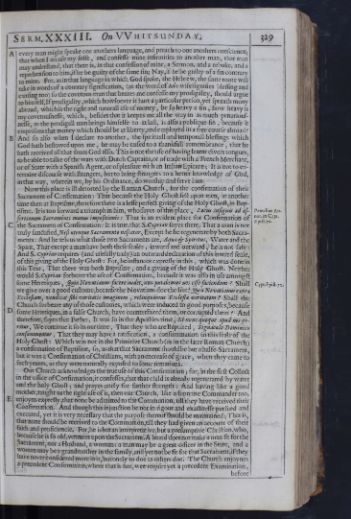 Serm. XXXIII.
On VVWhitsunday.
329
every man might speake one anothers language, and preach to one anothers conscience;
Serm. XXXIII.
On VVWhitsunday.
329
every man might speake one anothers language, and preach to one anothers conscience;
that when I accuse my selfe, and confesse mine infirmities to another man, that man
may understand, that there is, in that confession of mine, a Sermon, and a rebuke, and a
reprehension to him, if he be guilty of the same sin; Nay, if he be guilty of a sin contrary
to mine. For, as in that language in which God spoke, the Hebrew, the same roote will
take in words of a contrary signification, (as the word of Iobs wife signifies blessing and
cursing too) so the covetous man that heares me confesse my prodigality, should argue
to himself, If prodigality, which howsoever it hurt a particular person, yet spreads mony
abroad, which is the right and naturall use of money, be so heavy a sin, how heavy is
my covetousnesse, which, besides that it keepes me all the way in as much penurious-
nesse, as the prodigall man brings himselfe to at last, is also a publique sin, because it
emprisons that money which should be at liberty, and employed in a free course abroad?
And so also when I declare to another, the spirituall and temporall blessings which
God hath bestowed upon me, he may be raised to a thankfull remembrance, that he
hath received all that from God also. This is not the use of having learnt divers tongues,
to be able to talke of the wars with Dutch Captains, or of trade with a French Merchant,
or of State with a Spanish Agent, or of pleasure with an Italian Epicure; It is not to en-
tertaine discourse with strangers, but to bring strangers to a better knowledge of God,
in that way, wherein we, by his Ordinance, do worship and serve him. Now this place is ill detorted by the Roman Church, for the confirmation of their
Sacrament of Confirmation: That because the Holy Ghost fell upon men, at another
time then at Baptisme, therefore there is a lesse perfect giving of the Holy Ghost, in Bap-
tisme. It is too forward a triumph in him, who sayes of this place, Pamelius An-
not. in Cypr.
Epist. 72. Locus insignis ad as-
sertionem Sacramenti manus impositionis: That is an evident place for Confirmation of
the Sacrament of Confirmation: It is true, that S. Cyprian sayes there, That a man is not
truly sanctified, Nisi utroque Sacramento nascatur, Except he be regenerate by both Sacra-
ments: And he tels us what those two Sacraments are, Aqua & Spiritus, Water and the
Spirit, That except a man have both these seales, inward and outward, he is not safe:
And S. Cyprian requires (and usefully truly) an outward declaration of this inward seale,
of this giving of the Holy Ghost: For, he instances expresly in this, which was done in
this Text, That there was both Baptisme, and a giving of the Holy Ghost. Neither
would S. Cyprian forbeare the use of Confirmation, because it was also in use amongst
some Heretiques, Quia Novatianus facere audet, non putabimus nos esse faciendum?Cypr. Epist. 72. Shall
we give over a good custome, because the Novatians doe the like? Quia Novatianus extra
Ecclesiam, vendicat sibi veritatis imaginem, relinquemus Ecclesiæ veritatem? Shall the
Church forbeare any of those customes, which were induced to good purposes, because
some Heretiques, in a false Church, have counterfaited them, or corrupted them? And
therefore, sayes that Father, It was so in the Apostles time, Et nunc quoque apud nos ge-
ritur, We continue it so in our time, That they who are Baptized, Signaculo Dominico
consummentur, That they may have a ratification, a consummation in this seale of the
Holy Ghost: Which was not in the Primitive Church (as in the later Roman Church)
a confirmation of Baptisme, so, as that that Sacrament should be but a halfe-Sacrament,
but it was a Confirmation of Christians, with an encrease of grace, when they came to
such yeares, as they were naturally exposed to some tentations. Our Church acknowledges the true use of this Confirmation; for, in the first Collect
in the office of Confirmation, it confesses, that that child is already regenerated by water
and the holy Ghost; and prayes onely for farther strength: And having like a good
mother, taught us the right use of it, then our Church, like a supreme Commander too,
enjoyns expresly, that none be admitted to the Communion, till they have received their
Confirmation. And though this injunction be not in rigour and exactnesse pursued and
executed, yet it is very necessary that the purpose thereof should be maintained; That is,
that none should be received to the Communion, till they had given an account of their
faith and proficiencie. For, he is but an interpretative, but a presumptive Christian, who,
because he is so old, ventures upon the Sacrament. A beard does not make a man fit for the
Sacrament, nor a Husband, a woman: a man may be a great officer in the State, and a
woman may be a grandmother in the family, and yet not be fit for that Sacrament, if they
have never considered more in it, but onely to doe as others doe. The Church enjoynes
a precedent Confirmation; where that is not, wee require yet a precedent Examination, before
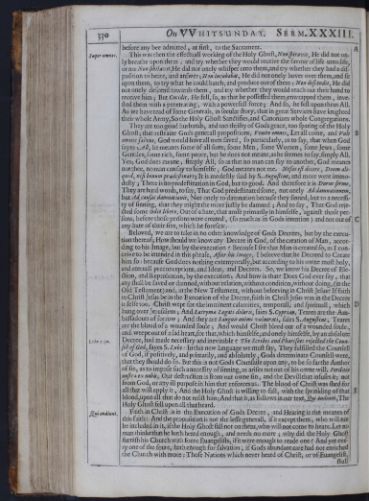 330
On VVWhitsunday.
Serm. XXXIII.
before any bee admitted, at first, to the Sacrament.
This was then the effectuall working of the Holy Ghost, Super omnes. Non spiravit, He did not on-
330
On VVWhitsunday.
Serm. XXXIII.
before any bee admitted, at first, to the Sacrament.
This was then the effectuall working of the Holy Ghost, Super omnes. Non spiravit, He did not on-ly breathe upon them, and try whether they would receive the savour of life unto life,
or no: Non sibilavit, He did not onely whisper unto them, and try whether they had a dis-
position to heare, and answer; Non incubabat, He did not onely hover over them, and sit
upon them, to try what he could hatch, and produce out of them; Non descendit, He did
not onely descend towards them, and try whether they would reach out their hand to
receive him; But Cecidit, He fell, so, as that he possessed them, enwrapped them, inve-
sted them with a penetrating, with a powerfull force; And so, he fell upon them All.
As we have read of some Generals, in secular story, that in great Services have knighted
their whole Army, So the Holy Ghost Sanctifies, and Canonizes whole Congregations. They are too good husbands, and too thrifty of Gods grace, too sparing of the Holy
Ghost; that restraine Gods generall propositions, Venite omnes, Let all come, and Vult
omnes salvos, God would have all men saved, so particularly, as to say, that when God
sayes All, he meanes some of all sorts, some Men, some Women, some Jews, some
Gentiles, some rich, some poore, but he does not meane, as he seemes to say, simply All.
Yes; God does meane, simply All, so as that no man can say to another, God meanes
not thee, no man can say to himselfe, God meanes not me. Nefas est dicere, Deum ali-
quid, nisi bonum prædestinare; It is modestly said by S. Augustine, and more were immo-
desty; There is no predestination in God, but to good. And therefore it is Durus sermo,
They are hard words, to say, That God predestinated some, not onely Ad damnationem,
but Ad causas damnationis, Not onely to damnation because they sinned, but to a necessi-
ty of sinning, that they might the more justly be damned; And to say, That God reje-
cted some Odio libero, Out of a hate, that arose primarily in himselfe, against those per-
sons, before those persons were created, (so much as in Gods intention) and not out of
any hate of their sins, which he foresaw. Beloved, we are to take in no other knowledge of Gods Decrees, but by the execu-
tion thereof; How should we know any Decree in God, of the creation of Man, accor-
ding to his Image, but by the execution? Because I see that Man is created so, as I con-
ceive to be intended in this phrase, After his Image, I beleeve that he Decreed to Create
him so: because God does nothing extemporally, but according to his owne most holy,
and eternall preconceptions, and Ideas, and Decrees. So, we know his Decree of Ele-
ction, and Reprobation, by the execution; And how is that? Does God ever say, that
any shall be saved or damned, without relation, without condition, without doing, (in the
Old Testament) and, in the New Testament, without beleeving in Christ Jesus? If faith
in Christ Jesus be in the Execution of the Decree, faith in Christ Jesus was in the Decree
it selfe too. Christ wept for the imminent calamities, temporall, and spirituall, which
hung over Jerusalem; And Lacrymæ Legati doloris, saies S. Cyprian, Teares are the Am-
bassadours of sorrow; And they are Sanguis animi vulnerati, saies S. Augustine, Teares
are the bloud of a wounded soule; And would Christ bleed out of a wounded soule,
and weepe out of a sad heart, for that, which himselfe, and onely himselfe, by an absolute
Decree, Luke 7.30. had made necessary and inevitable? The Scribes and Pharisees rejected the Coun-
sell of God, sayes S. Luke: In this new language we must say, They fulfilled the Counsell
of God, if positively, and primarily, and absolutely, Gods determinate Counsell were,
that they should do so. But this is not Gods Counsaile upon any, to be so far the Author
of sin, as to impose such a necessity of sinning, as arises not out of his owne will. Perditio
nostra ex nobis, Our destruction is from our owne sin, and the Devill that infuses it; not
from God, or any ill purpose in him that enforces us. The blood of Christ was shed for
all that will apply it, And the Holy Ghost is willing to fall, with the sprinkling of that
blood, upon all that do not resist him; And that is, as follows in our text, Qui audiunt, The
Holy Ghost fell upon all that heard. Faith in Christ is in the Execution of Gods Decree, Qui audiunt. and Hearing is the meanes of
this faith: And the proposition is not the lesse generall, if it except them, who will not
be included in it, if the Holy Ghost fall not on them, who will not come to heare. Let no
man thinke that he hath heard enough, and needs no more; why did the Holy Ghost
furnish his Church with foure Euangelists, if it were enough to reade one? And yet eve-
ry one of the foure, hath enough for salvation, if Gods abundant care had not enriched
the Church with more: Those Nations which never heard of Christ, or of Euangelist, shall
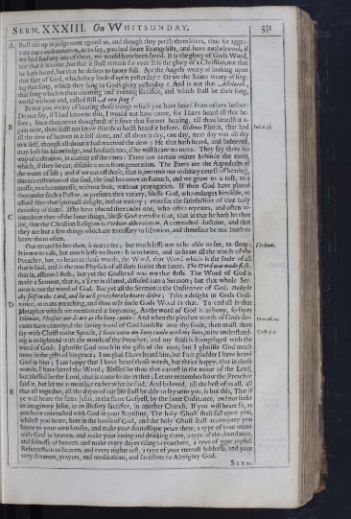 Serm. XXXIII.
On VVWhitsunday.
331
shall rise up in judgement against us, and though they perish themselves, thus far aggra-
Serm. XXXIII.
On VVWhitsunday.
331
shall rise up in judgement against us, and though they perish themselves, thus far aggra-vate our condemnation, as to say, you had foure Euangelists, and have not beleeved, if
we had had any one of them, we would have been saved. It is the glory of Gods Word,
not that it is come, but that it shall remain for ever: It is the glory of a Christian, not that
he hath heard, but that he desires to heare still. Are the Angels weary of looking upon
that face of God, which they looked upon yesterday? Or are Saints weary of sing-
ing that song, which they sung to Gods glory yesterday? And is not that Alleluiah,
that song which is their morning and evening sacrifice, and which shall be their song,
world without end, called still A new song? Be not you weary of hearing those things which you have heard from others before:
Do not say, if I had knowne this, I would not have come, for I have heard all this be-
fore; since thou never thoughtest of it since that former hearing, till thou heardst it a-
gain now, thou didst not know that thou hadst heard it before. Gideons Fleece, Iud. 6.36. that had
all the dew of heaven in it self alone, and all about it dry, one day, next day was all dry
in it self, though all about it had received the dew: He that hath heard, and beleeved,
may lose his knowledge, and his faith too, if he will heare no more. They say there is a
way of castration, in cutting off the eares: There are certain veines behinde the eares,
which, if they be cut, disable a man from generation. The Eares are the Aqueducts of
the water of life; and if we cut off those, that is, intermit our ordinary course of hearing,
this is a castration of the soul, the soul becomes an Eunuch, and we grow to a rust, to a
mosse, to a barrennesse, without fruit, without propagation. If then God have placed
thee under such a Pastor, as presents thee variety, blesse God, who enlarges himselfe, to
afford thee that spirituall delight, in that variety; even for the satisfaction of that holy
curiosity of thine. If he have placed thee under one, who often repeates, and often re-
members thee of the same things, blesse God even for that, that in that he hath let thee
see, that the Christian Religion is Verbum abbreviatum, A contracted doctrine, and that
they are but a few things which are necessary to salvation, and therefore be not loath to
heare them often. Verbum. Our errand hither then, is not to see; but much lesse not to be able to see, to sleep:
It is not to talk, but much lesse to snort: It is to heare, and to heare all the words of the
Preacher, but, to heare in those words, the Word, that Word which is the soule of all
that is said, and is the true Physick of all their soules that heare. The Word was made flesh;
that is, assumed flesh; but yet the Godhead was not that flesh. The Word of God is
made a Sermon, that is, a Text is dilated, diffused into a Sermon; but that whole Ser-
mon is not the word of God. But yet all the Sermon is the Ordinance of God. Delight
thy self in the Lord, and he will give thee thy hearts desire; Take a delight in Gods Ordi-
nance, in mans preaching, and thou wilt finde Gods Word in that. To end all in that
Metaphor which we mentioned at beginning, As the word of God is as hony, so sayes
Solomon, Pleasant words are as the hony combe:Prov. 16.24. And when the pleasant words of Gods ser-
vants have conveyed the saving word of God himselfe into thy soule, then maist thou
say with Christ to the Spouse, I have eaten my hony combe with my hony, Cant. 5.1. mine understand-
ing is enlightned with the words of the Preacher, and my faith is strengthned with the
word of God; I glorifie God much in the gifts of the man, but I glorifie God much
more in the gifts of his grace; I am glad I have heard him, but I am gladder I have heard
God in him; I am happy that I have heard those words, but thrice happy, that in those
words, I have heard the Word; Blessed be thou that camest in the name of the Lord,
but blessed be the Lord, that is come to me in thee; Let me remember how the Preacher
said it, but let me remember rather what he said. And beloved, all the best of us all, all
that all together, all the dayes of our life shall be able to say unto you, is but this, That if
ye will heare the same Jesus, in the same Gospell, by the same Ordinance, and not seeke
an imaginary Jesus, in an illusory sacrifice, in another Church, If you will heare so, as
you have contracted with God in your Baptisme, The holy Ghost shall fall upon you,
whilest you heare, here in the house of God, and the holy Ghost shall accompany you
home to your own houses, and make your domestique peace there, a type of your union
with God in heaven; and make your eating and drinking there, a type of the abundance,
and fulnesse of heaven; and make every dayes rising to you there, a type of your joyfull
Resurrection to heaven; and every nights rest, a type of your eternall Sabbath; and your
very dreames, prayers, and meditations, and sacrifices to Almighty God. Serm.
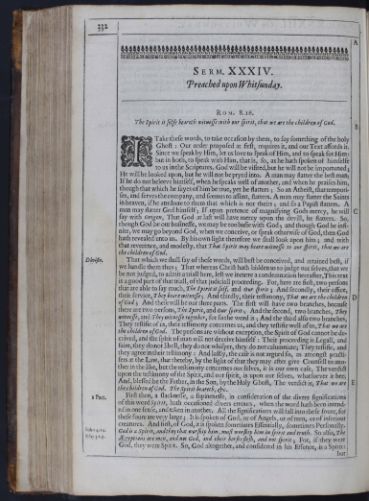 332
332
SERM. XXXIV.
Preached upon Whitsunday.
ROM. 8.16.
The Spirit it selfe beareth witnesse with our spirit, that we are the children of God.
I Take these words, to take occasion by them, to say something of the holy
Ghost: Our order proposed at first, requires it, and our Text affords it.
Since we speak by Him, let us love to speak of Him, and to speak for Him:
but in both, to speak with Him, that is, so, as he hath spoken of himselfe
to us in the Scriptures. God will be visited, but he will not be importuned;
He will be looked upon, but he will not be pryed into. A man may flatter the best man;
If he do not beleeve himself, when he speaks well of another, and when he praises him,
though that which he sayes of him be true, yet he flatters; So an Atheist, that tempori-
ses, and serves the company, and seemes to assent, flatters. A man may flatter the Saints
in heaven, if he attribute to them that which is not theirs; and so a Papist flatters. A
man may flatter God himself; If upon pretence of magnifying Gods mercy, he will
say with Origen, That God at last will have mercy upon the devill, he flatters. So,
though God be our businesse, we may be too busie with God; and though God be infi-
nite, we may go beyond God, when we conceive, or speak otherwise of God, then God
hath revealed unto us. By his own light therefore we shall look upon him; and with
that reverence, and modesty, that That Spirit may beare witnesse to our spirit, that we are
the children of God.
That which we shall say of these words, Divisio. will best be conceived, and retained best, if
we handle them thus; That whereas Christ hath bidden us to judge our selves, that we
be not judged, to admit a triall here, lest we incurre a condemnation hereafter, This text
is a good part of that triall, of that judiciall proceeding. For, here are first, two persons
that are able to say much, The Spirit it self, and Our spirit; And secondly, their office,
their service, They beare witnesse; And thirdly, their testimony, That we are the children
of God; And these will be our three parts. The first will have two branches, because
there are two persons, The Spirit, and Our spirit; And the second, two branches, They
witnesse, and They witnesse together, for so the word is; And the third also two branches,
They testifie of us, their testimony concernes us, and they testifie well of us, That we are
the children of God. The persons are without exception, the Spirit of God cannot be de-
ceived, and the spirit of man will not deceive himself: Their proceeding is Legall, and
faire, they do not libell, they do not whisper, they do not calumniate; They testifie, and
they agree in their testimony: And lastly, the case is not argued so, as amongst practi-
sers at the Law, that thereby, by the light of that they may after give Counsell to ano-
ther in the like, but the testimony concernes our selves, it is our own case, The verdict
upon the testimony of the Spirit, and our spirit, is upon our selves, whatsoever it bee;
And, blessed be the Father, in the Son, by the Holy Ghost, The verdict is, That we are
the children of God. The Spirit beareth, &c.
First then, 1 Part. a slacknesse, a supinenesse, in consideration of the divers significations
of this word Spirit, hath occasioned divers errours, when the word hath been intend-
ed in one sense, and taken in another. All the significations will fall into these foure, for
these foure are very large; It is spoken of God, or of Angels, or of men, or of inferiour
creatures. And first, of God, it is spoken sometimes Essentially, sometimes Personally.
Iohn 4.24. God is a Spirit, and they that worship him, must worship him in spirit and truth. So also, The
Ægyptians are men, and not God, and their horses flesh, and not spirit; Esay 31.3 For, if they were
God, they were Spirit. So, God altogether, and considered in his Essence, is a Spirit: but
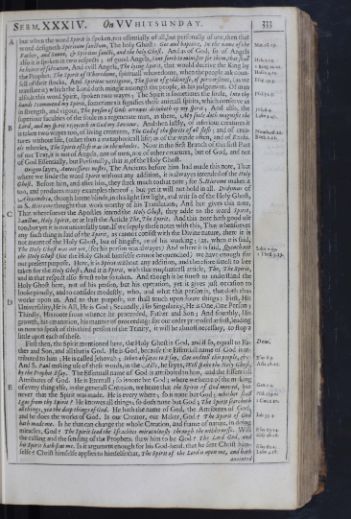 Serm. XXXIV.
On VVWhitsunday.
333
but when the word Spirit is spoken, not essentially of all, but personally of one, then that
Serm. XXXIV.
On VVWhitsunday.
333
but when the word Spirit is spoken, not essentially of all, but personally of one, then that
word designeth Spiritum sanctum, Mat. 28.19. The holy Ghost: Goe and baptize, In the name of the
Father, and Sonne, & Spiritus sancti, and the holy Ghost. And as of God, so of Angels
also it is spoken in two respects; of good Angels, Heb. 1.14. Sent forth to minister for them, that shall
be heires of salvation, And evill Angels, The lying Spirit, 1 King 22.22. that would deceive the King by
the Prophet; The Spirit of Whoredome, spirituall whoredome, Hosea 4.12. when the people ask coun-
sell of their stocks, And Spiritus vertiginis, The spirit of giddinesse, of perversities, Esay 19.3. (as we
translate it) which the Lord doth mingle amongst the people, in his judgement. Of man
also, is this word Spirit, spoken two wayes; The Spirit is sometimes the soule, Psal. 31.5. Into thy
hands I commend my Spirit, sometimes it signifies those animall spirits, which conserve us
in strength, and vigour, The poyson of Gods arrowes drinketh up my spirit; And also, Job 6.4. the
superiour faculties of the soule in a regenerate man, Luke 1.47. as there, My soule doth magnifie the
Lord, and my spirit rejoyceth in God my Saviour. And then lastly, of inferiour creatures it
is taken two wayes too, of living creatures, Numb. 16.22. The God of the spirits of all flesh; and of crea-
tures without life, Ezek. 1.21. (other then a metaphoricall life) as of the winde often, and of Ezeki-
els wheeles, The Spirit of life was in the wheeles. Now in this first Branch of this first Part
of our Text, it is not of Angels, nor of men, nor of other creatures, but of God, and not
of God Essentially, but Personally, that is, of the Holy Ghost.
Origen sayes, Antecessores nostri, The Ancients before him had made this note, That
where we finde the word Spirit without any addition, it is alwayes intended of the Holy
Ghost. Before him, and after him, they stuck much to that note; for S. Hierome makes it
too, and produces many examples thereof; but yet it will not hold in all. Didymus of
Alexandria, though borne blinde, in this light saw light, and writ so of the Holy Ghost,
as S. Hierome thought that work worthy of his Translation; And hee gives this note,
That wheresoever the Apostles intend the Holy Ghost, they adde to the word Spirit,
Sanctus, Holy Spirit, or at least the Article The, The Spirit. And this note hath good use
too, but yet it is not universally true. If we supply these notes with this, That whensoever
any such thing is said of the Spirit, as cannot consist with the Divine nature, there it is
not meant of the Holy Ghost, but of his gifts, or of his working; (as, when it is said,
The Holy Ghost was not yet, (for his person was alwayes) And where it is said, Iohn 7.39. Quench not
the Holy Ghost (for the Holy Ghost himselfe cannot be quenched)1 Thess. 5.19. we have enough for
our present purpose. Here, it is Spirit without any addition, and therefore fittest to bee
taken for the Holy Ghost; And it is Spirit, with that emphaticall article, The, The Spirit,
and in that respect also fittest to be so taken. And though it be fittest to understand the
Holy Ghost here, not of his person, but his operation, yet it gives just occasion to
looke piously, and to consider modestly, who, and what this person is, that doth thus
worke upon us. And to that purpose, we shall touch upon foure things: First, His
Universality, He is All, He is God; Secondly, His Singularity, He is One, One Person;
Thirdly, His roote from whence he proceeded, Father and Son; And fourthly, His
growth, his emanation, his manner of proceeding: for our order proposed at first, leading
us now to speak of this third person of the Trinity, it will be almost necessary, to stop a
little upon each of these.
First then, the Spirit mentioned here, the Holy Ghost is God, and if so, Deus. equall to Fa-
ther and Son, and all that is God. He is God, because the Essentiall name of God is at-
tributed to him; He is called Jehovah; Iehovah sayes to Esay, Goe and tell this people,Esay 6.9. &c.
And S. Paul making use of these words, in the Acts, Acts 28.25. he sayes, Well spake the Holy Ghost,
by the Prophet Esay. The Essentiall name of God is attributed to him, and the Essentiall
Attributes of God. He is Eternall; so is none but God; where we heare of the making
of every thing else, in the generall Creation, we heare that the Spirit of God moved, Gen. 1.2. but
never that the Spirit was made. He is every where; Psal. 139.7. so is none but God; whither shall
I goe from thy Spirit? He knowes all things; so doth none but God;1 Cor. 2.10. The Spirit searcheth
all things, yea the deep things of God. He hath the name of God, the Attributes of God,
and he does the works of God. Is our Creator, our Maker, God?Iob 33.4. The Spirit of God
hath made me. Is he that can change the whole Creation, and frame of nature, in doing
miracles, God? The Spirit lead the Israelites miraculously through the wildernesse.Esay 63.14. Will
the calling and the sending of the Prophets, Esay 48.16. shew him to be God? The Lord God, and
his Spirit hath sent me. Is it argument enough for his God-head, Esay 61.1. that he sent Christ him-
selfe? Christ himselfe applies to himselfe that, Luke 4.18. The Spirit of the Lord is upon me, and hath anointed
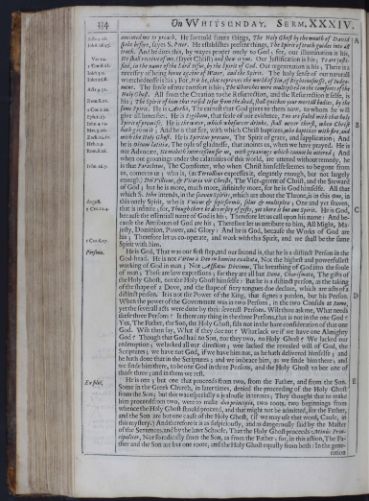 Serm. XXXIV.
On Whitsunday.
334
anointed me to preach.Acts 1.16. He foretold future things, The Holy Ghost by the mouth of David
Serm. XXXIV.
On Whitsunday.
334
anointed me to preach.Acts 1.16. He foretold future things, The Holy Ghost by the mouth of David
Iohn 16.13. spoke before, sayes S. Peter. He establishes present things, The Spirit of truth guides into all
truth. And he does this, by wayes proper onely to God; for, our illumination is his,
He shall receive of me, Ver. 14. (sayes Christ) and shew it you. Our Justification is his; Ye are justi-
fied, in the name of the Lord Iesus, by the Spirit of God.1 Cor. 6.11. Our regeneration is his; There is a
necessity of Iohn 3.5. being borne againe of Water, and the Spirit. The holy sense of our naturall
wretchednesse is his;Iohn 16.8. For, It is he, that reproves the world of Sin, of Righteousnesse, of Iudge-
ment. The sense of true comfort is his;Acts 9.31. The Churches were multiplied in the comforts of the
Holy Ghost. All from the Creation to the Resurrection, and the Resurrection it selfe, is
his;Rom. 8.11. The Spirit of him that raised Iesus from the dead, shall quicken your mortall bodies, by the
same Spirit.2 Cor. 1.22. He is Arrha, The earnest that God gives to them now, to whom he will
Eph. 1.13. give all hereafter. He is Sigillum, that seale of our evidence, You are sealed with that holy
Spirit of promise. Iohn 4.14. He is the water, which whosoever drinks, shall never thirst, when Christ
hath given it; Mat. 3.11. And he is that fire, with which Christ baptizes, who baptizes with fire, and
with the Holy Ghost. Zach. 12.10. He is Spiritus precum, The Spirit of grace, and supplication; And
Heb. 1.9. he is Oleum lætitiæ, The oyle of gladnesse, that anoints us, when we have prayed. He is
our Advocate, Rom. 8.26. He maketh intercession for us, with groanings which cannot be uttered; And
when our groanings under the calamities of this world, are uttered without remedy, he
is that Paracletus, Iohn 16.7. The Comforter, who when Christ himselfe seemes to be gone from
us, comes to us; who is, (as Tertullian expresses it, elegantly enough, but not largely
enough) Dei Villicus, & Vicaria vis Christi, The Vice-gerent of Christ, and the Steward
of God; but he is more, much more, infinitely more, for he is God himselfe. All that
which S. Iohn intends, in the seaven Spirits, which are about the Throne, is in this One, in
this onely Spirit, August. who is Vnicus & septiformis, solus & multiplex; One and yet seaven,
that is infinite;1 Cor. 12.14. for, Though there be diversity of gifts, yet there is but one Spirit. He is God,
because the essentiall name of God is his; Therefore let us call upon his name: And be-
cause the Attributes of God are his; Therefore let us attribute to him, All Might, Ma-
jesty, Dominion, Power, and Glory: And he is God, because the Works of God are
his;1 Cor. 6.17. Therefore let us co-operate, and work with this Spirit, and we shall be the same
Spirit with him.
He is God, Persona. That was our first step, and our second is, that he is a distinct Person in the
God-head. He is not Virtus à Deo in homine exaltata, Not the highest and powerfullest
working of God in man; Not Afflatus Divinus, The breathing of God into the soule
of man; These are low expressions; for they are all but Dona, Charismata, The gifts of
the Holy Ghost, not the Holy Ghost himselfe: But he is a distinct person, as the taking
of the shape of a Dove, and the shape of fiery tongues doe declare, which are acts of a
distinct person. It is not the Power of the King, that signes a pardon, but his Person.
When the power of the Government was in two Persons, in the two Consuls at Rome,
yet the severall acts were done by their severall Persons. Wilt thou ask me, What needs
these three Persons? Is there any thing in the three Persons, that is not in the one God?
Yes, The Father, the Son, the Holy Ghost, fals not in the bare consideration of that one
God. Wilt thou say, What if they doe not? What lack we if we have one Almighty
God? Though that God had no Son, nor they two, no Holy Ghost? We lacked our
redemption; we lacked all our direction; wee lacked the revealed will of God, the
Scriptures; we have not God, if we have him not, as he hath delivered himselfe; and
he hath done that in the Scriptures; and we imbrace him, as we finde him there; and
we finde him there, to be one God in three Persons, and the Holy Ghost to bee one of
those three; and in them we rest.
He is one;Ex filio. but one that proceeds from two, from the Father, and from the Son.
Some in the Greek Church, in later times, denied the proceeding of the Holy Ghost
from the Son; but this was especially a jealousie in termes; They thought that to make
him proceed from two, were to make duo principia, two roots, two beginnings from
whence the Holy Ghost should proceed, and that might not be admitted, for the Father,
and the Son are but one cause of the Holy Ghost, (if we may use that word, Cause, in
this mystery.) And therefore it is as suspiciously, and as dangerously said by the Master
of the Sentences, and by the later Schoole, That the Holy Ghost proceeds Minùs Prin-
cipaliter, Not so radically from the Son, as from the Father; for, in this action, The Fa-
ther and the Son are but one roote, and the Holy Ghost equally from both: In the gene-
ration
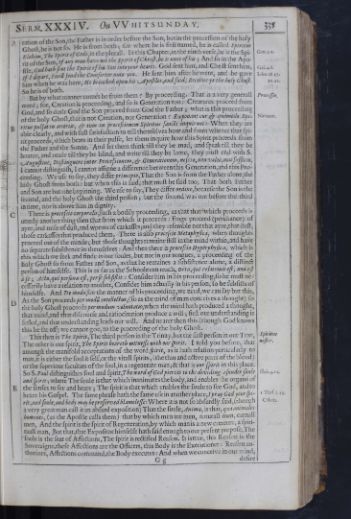 Serm. XXXIV.
On Whitsunday.
335
ration of the Son, the Father is in order before the Son, but in the procession of the holy
Serm. XXXIV.
On Whitsunday.
335
ration of the Son, the Father is in order before the Son, but in the procession of the holy
Ghost, he is not so. He is from both; for where he is first named, he is called Spiritus
Elohim, The Spirit of Gods, in the plurall. In this Chapter, in the ninth verse, Gen. 1.2. he is the Spi-
rit of the Son, If any man have not the Spirit of Christ, he is none of his; And so in the Apo-
stle, God hath sent the Spirit of his Son into your hearts. God sent him, Gal. 4.6. and Christ sent him,
Iohn 16.17. If I depart, I will send the Comforter unto you. He sent him after he went, and he gave
him when 20.22. he was here, He breathed upon his Apostles, and said, Receive ye the holy Ghost.
So he is of both.
But by what manner comes he from them? By proceeding.Processio. That is a very generall
word; for, Creation is proceeding, and so is Generation too: Creatures proceed from
God, and so doth God the Son proceed from God the Father; what is this proceeding
of the holy Ghost, that is not Creation, nor Generation?Nazianz. Exponant cur & quomodo Spi-
ritus pulsat in arteriis, & tum in processionem Spiritus sancti inquirant: When they are
able clearly, and with full satisfaction to tell themselves how and from whence that spi-
rit proceeds, which beats in their pulse, let them inquire how this Spirit proceeds from
the Father and the Sonne. And let them think till they be mad, and speak till they be
hoarce, and reade till they be blind, and write till they be lame, they must end with S.
Augustine, Distinguere inter Processionem, & Generationem, nescio, non valeo, non sufficio,
I cannot distinguish, I cannot assigne a difference between this Generation, and this Pro-
ceeding. We use to say, they differ principio, That the Son is from the Father alone, the
holy Ghost from both: but when this is said, that must be said too, That both Father
and Son are but one beginning. We use to say, They differ ordine, because the Son is the
second, and the holy Ghost the third person; but the second was not before the third
in time, nor is above him in dignity.
There is processio corporalis, such a bodily proceeding, as that that which proceeds is
utterly another thing then that from which it proceeds: frogs proceed (perchance) of
ayre, and mise of dust, and worms of carkasses; and they resemble not that ayre, that dust,
those carkasses that produced them. There is also processio Metaphysica, when thoughts
proceed out of the minde; but those thoughts remaine still in the mind within, and have
no separate subsistence in themselves: And then there is processio Hyperphysica, which is
this which we seek and finde in our soules, but not in our tongues, a proceeding of the
holy Ghost so from Father and Son, as that he remaines a subsistence alone, a distinct
person of himselfe. This is as far as the Schoole can reach, Ortu, qui relationis est, non est
à se; Actu, qui personæ est, per se subsistit: Consider him in his proceeding, so he must ne-
cessarily have a relation to another, Consider him actually in his person, so he subsists of
himselfe. And De modo, for the manner of his proceeding, we need, we can say but this,
As the Son proceeds per modū intellectus, (so as the mind of man conceives a thought) so
the holy Ghost proceeds per modum voluntatis; when the mind hath produced a thought,
that mind, and that discourse and ratiocination produce a will; first our understanding is
setled, and that understanding leads our will. And nearer then this (though God knows
this be far off) we cannot goe, to the proceeding of the holy Ghost.
This then is The Spirit, Spiritus The third person in the Trinity, but the first person in our Text,
noster. The other is our spirit, The Spirit beareth witnesse with our spirit. I told you before, that
amongst the manifold acceptations of the word spirit, as it hath relation particularly to
man, it is either the soul it self, or the vitall spirits, (the thin and active parts of the bloud)
or the superiour faculties of the soul, in a regenerate man; & that is our spirit in this place.
So S. Paul distinguishes soul and spirit, Heb. 4.12. The word of God pierces to the dividing asunder soule
and spirit; where The soule is that which inanimates the body, and enables the organs of
the senses to see and heare; The spirit is that which enables the soule to see God, and to
heare his Gospel. The same phrase hath the same use in another place, 1 Thes. 5.25. I pray God your spi-
rit, and soule, and body may be preserved blamelesse: Calvin. Where it is not so absurdly said, (though
a very great man call it an absurd exposition) That the soule, Anima, is that, qua animales
homines, (as the Apostle calls them) that by which men are men, naturall men, carnall
men, And the spirit is the spirit of Regeneration, by which man is a new creature, a spiri-
tuall man, But that, that Expositor himselfe hath said enough to our present purpose, The
soule is the seat of Affections, The spirit is rectified Reason. It is true, this Reason is the
Soveraigne, these Affections are the Officers, this Body is the Executioner: Reason au-
thorizes, Affections command, the Body executes: And when we conceive in our mind, Gg desire
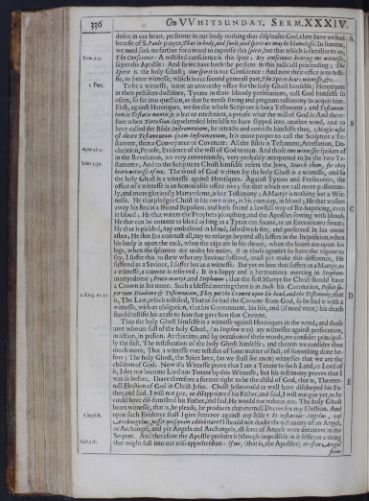 Serm. XXXIV.
On Whitsunday.
336
desire in our heart, performe in our body nothing that displeases God, then have we had
Serm. XXXIV.
On Whitsunday.
336
desire in our heart, performe in our body nothing that displeases God, then have we had
benefit of S. Pauls prayer, That in body, and soule, and spirit we may be blamelesse. In summe,
we need seek no farther for a word to expresse this spirit, but that which is familiar to us,
The Conscience:Rom. 9.1. A rectified conscience is this spirit; My conscience bearing me witnesse,
sayes the Apostle: And so we have both the persons in this judiciall proceeding; The
Spirit is the holy Ghost; Our spirit is our Conscience: And now their office is to testi-
fie, to beare witnesse, which is our second generall part, The Spirit bears witnesse, &c.
To be a witnesse, 2 Part. is not an unworthy office for the holy Ghost himselfe: Heretiques
in their pestilent doctrines, Tyrans in their bloody persecutions, call God himselfe so
often, so far into question, as that he needs strong and pregnant testimony to acquit him.
First, against Heretiques, we see the whole Scripture is but a Testament; and Testamen-
tum is Testatio mentis, it is but an attestation, a proofe what the will of God is: And there-
fore when Tertullian deprehended himselfe to have slipped into another word, and to
have called the Bible Instrumentum, he retracts and corrects himselfe thus, Magìs usui
est dicere Testamentum quàm Instrumentum, It is more proper to call the Scripture a Te-
stament, then a Conveyance or Covenant: All the Bible is Testament, Attestation, De-
claration, Proofe, Apoc. 11.2. Evidence of the will of God to man. And those two witnesses spoken of
in the Revelation, are very conveniently, very probably interpreted to be the two Te-
staments; And to the Scriptures Christ himselfe refers the Jews, Iohn 5.39. Search them, for they
beare witnesse of me. The word of God written by the holy Ghost is a witnesse, and so
the holy Ghost is a witnesse against Heretiques. Against Tyrans and Persecuters, the
office of a witnesse is an honourable office too; for that which we call more passionate-
ly, and more gloriously Martyrdome, is but Testimony; A Martyr is nothing but a Wit-
nesse. He that pledges Christ in his own wine, in his own cup, in bloud; He that washes
away his sins in a second Baptisme, and hath found a lawfull way of Re-baptizing, even
in bloud; He that waters the Prophets ploughing, and the Apostles sowing with bloud;
He that can be content to bleed as long as a Tyran can foame, or an Executioner sweat;
He that is pickled, nay embalmed in bloud, salted with fire, and preserved in his owne
ashes; He that (to contract all, nay to enlarge beyond all) suffers in the Inquisition, when
his body is upon the rack, when the rags are in his throat, when the boots are upon his
legs, when the splinters are under his nailes, if in those agonies he have the vigour to
say, I suffer this to shew what my Saviour suffered, must yet make this difference, He
suffered as a Saviour, I suffer but as a witnesse. But yet to him that suffers as a Martyr, as
a witnesse, a crowne is reserved; It is a happy and a harmonious meeting in Stephens
martyrdome; Proto-martyr, and Stephanus; that the first Martyr for Christ should have
a Crown in his name. Such a blessed meeting there is in Ioash his Coronation, Posuit su-
per eum Diadema & Testimonium, 2 King. 11.12. They put the Crowne upon his head, and the Testimony; that
is, The Law, which testified, That as he had the Crowne from God, so he had it with a
witnesse, with an obligation, that his Government, his life, and (if need were) his death
should testifie his zeale to him that gave him that Crowne.
Thus the holy Ghost himselfe is a witnesse against Heretiques in the word; and those
men who are full of the holy Ghost, (as Stephen was) are witnesses against persecution,
in action, in passion. At this time, and by occasion of these words, we consider principal-
ly the first, The testification of the holy Ghost himselfe; and therein we consider thus
much more, That a witnesse ever testifies of some matter of fact, of something done be-
fore; The holy Ghost, the Spirit here, (as we shall see anon) witnesses that we are the
children of God. Now if a Witnesse prove that I am a Tenant to such Land, or Lord of
it, I doe not become Lord nor Tenant by this Witnesse, but his testimony proves that I
was so before. I have therefore a former right to be the child of God, that is, The eter-
nall Election of God in Christ Jesus. Christ Jesus could as well have disobeyed his Fa-
ther, and said, I will not goe, or disappointed his Father, and said, I will not goe yet, as he
could have dis-furnished his Father, and said, He would not redeem me. The holy Ghost
bears witnesse, that is, he pleads, he produces that eternall Decree for my Election. And
upon such Evidence shall I give sentence against my selfe?Chrysost. Si testaretur Angelus, vel
Archangelus, posset quisquam addubitare? I should not doubt the testimony of an Angel,
or Archangel, and yet Angels and Archangels, all sorts of Angels were deceivers in the
Serpent. And therefore the Apostle presents it (though impossible in it selfe) as a thing
that might fall into our mis-apprehension:Gal. 1.8. If we, (that is, the Apostles) or if an Angel from
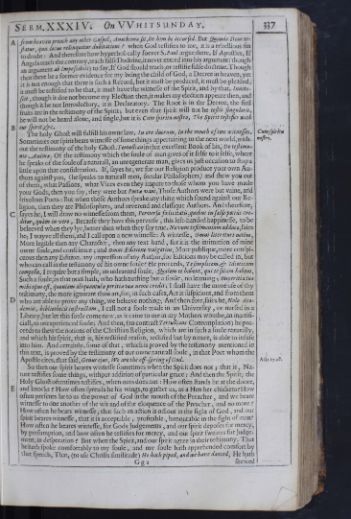 Serm. XXXIV.
On Whitsunday.
337
from heaven preach any other Gospel, Anathema sit, let him be accursed. But Quando Deus te-
Serm. XXXIV.
On Whitsunday.
337
from heaven preach any other Gospel, Anathema sit, let him be accursed. But Quando Deus te-statur, quis locus relinquitur dubitationi? when God testifies to me, it is a rebellious sin
to doubt: And therefore how hyperbolically soever S. Paul argue there, If Apostles, If
Angels teach the contrary, teach false Doctrine, it never entred into his argument (though
an argument ab Impossibili) to say, If God should teach, or testifie false doctrine. Though
then there be a former evidence for my being the child of God, a Decree in heaven, yet
it is not enough that there is such a Record, but it must be produced, it must be pleaded,
it must be testified to be that, it must have the witnesse of the Spirit, and by that, Innote-
scit, though it doe not become my Election then, it makes my election appeare then, and
though it be not Introductory, it is Declaratory. The Root is in the Decree, the first
fruits are in the testimony of the Spirit; but even that spirit will not be testis singularis,
he will not be heard alone, and single, but it is Cum spiritu nostro, The Spirit testifies with
our spirit, &c.
The holy Ghost will Cum spiritu fulfill his owne law, In ore duorum, In the mouth of two witnesses.
nostro. Sometimes our spirit bears witnesse of some things appertaining to the next world, with-
out the testimony of the holy Ghost. Tertullian in that excellent Book of his, De testimo-
nio Animæ. Of the testimony which the soule of man gives of it selfe to it selfe, where
he speaks of the soule of a naturall, an unregenerate man, gives us just occasion to stop a
little upon that consideration. If, sayes he, we for our Religion produce your own Au-
thors against you, (he speaks to naturall men, secular Philosophers) and shew you out
of them, what Passions, what Vices even they impute to those whom you have made
your Gods, then you say, they were but Poetæ vani, Those Authors were but vaine, and
frivolous Poets: But when those Authors speake any thing which sound against our Re-
ligion, then they are Philosophers, and reverend and classique Authors. And therefore,
sayes he, I will draw no witnesse from them, Perversæ fœlicitatis, quibus in falso potiùs cre-
ditur, quàm in vero, Because they have this perverse, this left-handed happinesse, to be
beleeved when they lye, better then when they say true. Novum testimonium adduco, saies
he; I wayve all them, and I call upon a new witnesse: A witnesse, Omni literaturi notius,
More legible then any Character, then any text hand, for it is the intimation of mine
owne soule, and conscience; and Omni Editione vulgatius, More publique, more conspi-
cuous then any Edition, any impression of any Author, for Editions may be called in, but
who can call in the testimony of his owne soule? He proceeds, Te simplicem, & Idioticum
compello, I require but a simple, an unlearned soule, Qualem te habent, qui te solam habent,
Such a soule, as that man hath, who hath nothing but a soule, no learning; Imperitia tua
mihiopus est, quoniam aliquantulæ peritiæ tuæ nemo credit; I shall have the more use of thy
testimony, the more ignorant thou art, for, in such cases, Art is suspicious, and from them
who are able to prove any thing, we beleeve nothing; And therefore, saies he, Nolo Aca-
demiis, bibliothecis instructam, I call not a soule made in an University, or nursed in a
Library, but let this soule come now, as it came to me in my Mothers wombe, an inartifi-
ciall, an unexperienced soule; And then, (to contract Tertullians Contemplation) he pro-
ceeds to shew the notions of the Christian Religion, which are in such a soule naturally,
and which his spirit, that is, his rectified reason, rectified but by nature, is able to infuse
into him. And certainly, some of that, which is proved by the testimony mentioned in
this text, is proved by the testimony of our owne naturall soule, in that Poet whom the
Apostle cites, that said, Genus ejus, We are the off-spring of God.Acts 17.28.
So then our spirit beares witnesse sometimes when the Spirit does not; that is, Na-
ture testifies some things, without addition of particular grace: And then the Spirit, the
Holy Ghost oftentimes testifies, when ours does not: How often stands he at the doore,
and knocks? How often spreads he his wings, to gather us, as a Hen her chickens? How
often presents he to us the power of God in the mouth of the Preacher, and we beare
witnesse to one another of the wit and of the eloquence of the Preacher, and no more?
How often he bears witnesse, that such an action is odious in the sight of God, and our
spirit beares witnesse, that it is acceptable, profitable, honourable in the sight of man?
How often he beares witnesse, for Gods Judgements, and our spirit deposes for mercy,
by presumption, and how often he testifies for mercy, and our spirit sweares for Judge-
ment, in desperation? But when the Spirit, and our spirit agree in their testimony, That
he hath spoke comfortably to my soule, and my soule hath apprehended comfort by
that speech, That, (to use Christs similitude) He hath piped, and we have danced, He hath Gg2 shewed
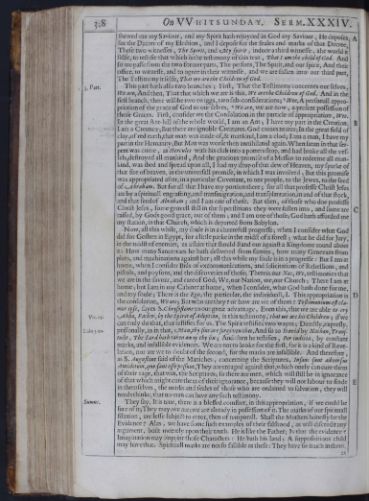 Serm. XXXIV.
On Whitsunday.
338
shewed me my Saviour, and my Spirit hath rejoyced in God my Saviour, He deposes
Serm. XXXIV.
On Whitsunday.
338
shewed me my Saviour, and my Spirit hath rejoyced in God my Saviour, He deposes
for the Decree of my Election, and I depose for the seales and marks of that Decree,
These two witnesses, The Spirit, and My spirit, induce a third witnesse, the world it
selfe, to testifie that which is the testimony of this text, That I am the child of God. And
so we passe from the two former parts, The persons, The Spirit, and our spirit, And their
office, to witnesse, and to agree in their witnesse, and we are fallen into our third part,
The Testimony it selfe, That we are the Children of God.
This part hath also two branches;3. Part. First, That the Testimony concernes our selves,
We are; And then, That that which we are is this, We are the Children of God. And in the
first branch, there will be two twiggs, two sub-considerations; 1 Wee, A personall appro-
priation of the grace of God to our selves, 2 We are, we are now, a present possession of
those Graces. First, consider we the Consolation in the particle of appropriation, Wee.
In the great Ant-hill of the whole world, I am an Ant; I have my part in the Creation,
I am a Creature; But there are ignoble Creatures. God comes nearer; In the great field of
clay, of red earth, that man was made of, & mankind, I am a clod; I am a man, I have my
part in the Humanity; But Man was worse then annihilated again. When satan in that ser-
pent was come, as Hercules with his club into a potters shop, and had broke all the ves-
sels, destroyed all mankind, And the gracious promise of a Messias to redeeme all man-
kind, was shed and spread upon all, I had my drop of that dew of Heaven, my sparke of
that fire of heaven, in the universall promise, in which I was involved; But this promise
was appropriated after, in a particular Covenant, to one people, to the Jewes, to the seed
of Abraham. But for all that I have my portion there; for all that professe Christ Jesus
are by a spirituall engrafting, and transmigration, and transplantation, in and of that stock,
and that seed of Abraham; and I am one of those. But then, of those who doe professe
Christ Jesus, some grovell still in the superstitions they were fallen into, and some are
raised, by Gods good grace, out of them; and I am one of those; God hath afforded me
my station, in that Church, which is departed from Babylon.
Now, all this while, my soule is in a cheerefull progresse; when I consider what God
did for Goshen in Egypt, for a little parke in the midst of a forest; what he did for Jury,
in the midst of enemies, as a shire that should stand out against a Kingdome round about
it: How many Sancerraes he hath delivered from famins, how many Genevaes from
plots, and machinations against her; all this while my soule is in a progresse: But I am at
home, when I consider Buls of excommunications, and solicitations of Rebellions, and
pistols, and poysons, and the discoveries of those; There is our Nos, We, testimonies that
we are in the favour, and care of God; We, our Nation, we, our Church; There I am at
home; but I am in my Cabinet at home, when I consider, what God hath done for me,
and my soule; There is the Ego, the particular, the individuall, I. This appropriation is
the consolation, We are; But who are they? or how are we of them? Testimonium est cla-
mor ipse, sayes S. Chrysostome to our great advantage, Even this, that we are able to cry
Abba, Father, by the Spirit of Adoption, Ver. 15. is this testimony, that we are his Children; if we
can truly do that, that testifies for us. The Spirit testifies two wayes; Directly, expresly,
personally, Luke 5.20. as in that, Man, thy sins are forgiven thee, And so to David by Nathan, Trans-
tulit, The Lord hath taken away thy sin; And then he testifies, Per indicia, by constant
marks, and infallible evidences. We are not to looke for the first, for it is a kind of Reve-
lation, nor are we to doubt of the second, for the marks are infallible. And therefore,
as S. Augustine said of the Maniches, concerning the Scriptures, Insani sunt adversus
Antidotum, quo sani esse possunt, They are enraged against that, which onely can cure them
of their rage, that was, the Scriptures; so there are men, which will still be in ignorance
of that which might cure them of their ignorance, because they will not labour to finde
in themselves, the marks and seales of those who are ordained to salvation, they will
needs thinke, that no man can have any such testimony.
They say, Sumus. It is true, there is a blessed comfort, in this appropriation, if we could be
sure of it; They may; we are; we are already in possession of it. The marks of our spirituall
filiation, are lesse subject to error, then of temporall. Shall the Mothers honesty be the
Evidence? Alas, we have some such examples of their falshood, as will discredit any
argument, built meerely upon their truth. He is like the Father; Is that the evidence?
Imagination may imprint those Characters: He hath his land; A supposititious child
may have that. Spirituall marks are not so fallible as these: They have so much in them, as
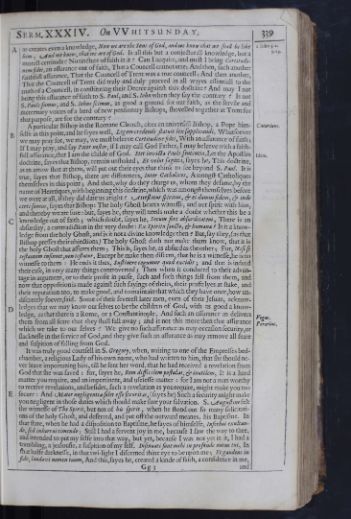 Serm. XXXIV.
On Whitsunday.
339
as creates even a knowledge, 1 Iohn 3.2. Now we are the Sons of God, and we know that we shall be like
Serm. XXXIV.
On Whitsunday.
339
as creates even a knowledge, 1 Iohn 3.2. Now we are the Sons of God, and we know that we shall be like
him; And we know, that we are of God. Is all this 5.19. but a conjecturall knowledge, but a
morall certitude? No tincture of faith in it? Can I acquire, and must I bring Certitudi-
nem fidei, an assurance out of faith, That a Councell cannot erre; And then, such another
faithfull assurance, That the Councell of Trent was a true councell; And then another,
That the Councell of Trent did truly and duly proceed in all wayes essentiall to the
truth of a Councell, in constituting their Decree against this doctrine? And may I not
bring this assurance of faith to S. Paul, and S. Iohn when they say the contrary? Is not
S. Pauls sumus, and S. Iohns scimus, as good a ground for our faith, as the servile and
mercenary voices of a herd of new pensionary Bishops, shovelled together at Trent for
that purpose, are for the contrary?
A particular Bishop in the Romane Church, cites an universall Bishop, Catarinus. a Pope him-
selfe in this point, and he sayes well, Legem credendi statuit lex supplicandi, Whatsoever
we may pray for, we may, we must beleeve Certitudine fidei, With an assurance of faith;
If I may pray, and say Pater noster, if I may call God Father, I may beleeve with a faith-
full assurance, that I am the childe of God. Stet invicta Pauli sententia, Idem. Let the Apostles
doctrine, sayes that Bishop, remain unshaked; Et velut sagitta, sayes he, This doctrine,
as an arrow shot at them, will put out their eyes that think to see beyond S. Paul. It is
true, sayes that Bishop, there are differences, Inter Catholicos, Amongst Catholiques
themselves in this point; And then, why do they charge us, whom they defame, by the
name of Heretiques, with beginning this doctrine, which was amongst themselves before
we were at all, if they did date us aright? Attestatur spiritus, & ei damus fidem, & inde
certi sumus, sayes that Bishop: The holy Ghost beares witnesse, and our spirit with him,
and thereby we are sure: but, sayes he, they will needs make a doubt whether this be a
knowledge out of faith; which doubt, sayes he, Secum fert absurditatem, There is an
absurdity, a contradiction in the very doubt: Ex Spiritu sancto, & humana? Is it a know-
ledge from the holy Ghost, and is it not a divine knowledge then? But, say they, (as that
Bishop presses their objections) The holy Ghost doth not make them know, that it is
the holy Ghost that assures them; This is, sayes he, as absurd as the other; For, Nisi se
testantem insinuet, non testatur, Except he make them discern, that he is a witnesse, he is no
witnesse to them: He ends it thus, Sustinere coguntur quod excidit; and that is indeed
their case, in very many things controverted; Then when it conduced to their advan-
tage in argument, or to their profit in purse, such and such things fell from them, and
now that opposition is made against such sayings of theirs, their profit lyes at stake, and
their reputation too, to make good, and to maintain that which they have once, how un-
discreetly soever, said. Some of their severest later men, even of their Jesuits, acknow-
ledges that we may know ourselves to be the children of God, with as good a know-
ledge, as that there is a Rome, or a Constantinople, Vegas. And such an assurance as delivers
them from all feare that they shall fall away;Pererius. and is not this more then that assurance
which we take to our selves? We give no such assurance as may occasion security, or
slacknesse in the service of God, and they give such an assurance as may remove all feare
and suspition of falling from God.
It was truly good counsell in S. Gregory, when, writing to one of the Empresses bed-
chamber, a religious Lady of his own name, who had written to him, that she should ne-
ver leave importuning him, till he sent her word, that he had received a revelation from
God that she was saved: for, sayes he, Rem difficilem postulas, & inutilem, It is a hard
matter you require, and an impertinent, and uselesse matter: for I am not a man worthy
to receive revelations, and besides, such a revelation as you require, might make you too
secure: And Mater negligentiæ solet esse securitas, (sayes he) Such a security might make
you negligent in those duties which should make sure your salvation. S. Augustine felt
the witnesse of The Spirit, but not of his spirit, when he stood out so many solicitati-
ons of the holy Ghost, and deferred, and put off the outward meanes, his Baptisme. In
that state, when he had a disposition to Baptisme, he sayes of himselfe, Inferbui exultan-
do, sed inhorrui timendo; Still I had a fervent joy in me, because I saw the way to thee,
and intended to put my selfe into that way, but yet, because I was not yet in it, I had a
trembling, a jealousie, a suspition of my self. Insinuati sunt mihi in profundo nutus tui, In
that halfe darknesse, in that twi-light I discerned thine eye to be upon me; Et gaudens in
fide, laudavi nomen tuum, And this, sayes he, created a kinde of faith, a confidence in me, Gg3 and
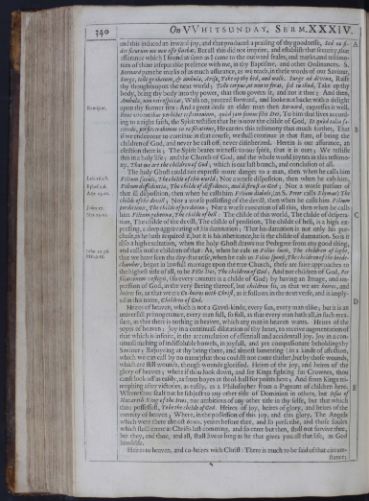 Serm. XXXIV.
On Whitsunday.
340
and this induced an inward joy, and that produced a praising of thy goodnesse, Sed ea fi-
Serm. XXXIV.
On Whitsunday.
340
and this induced an inward joy, and that produced a praising of thy goodnesse, Sed ea fi-des securum me non esse sinebat, But all this did not imprint, and establish that security, that
assurance which I found as soon as I came to the outward seales, and marks, and testimo-
nies of thine inseparable presence with me, in thy Baptisme, and other Ordinances. S.
Bernard puts the marks of as much assurance, as we teach, in these words of our Saviour,
Surge, tolle grabatum, & ambula, Arise, Take up thy bed, and walk. Surge ad divina, Raise
thy thoughts upon the next world; Tolle corpus, ut non te ferat, sed tu illud, Take up thy
body, bring thy body into thy power, that thou govern it, and not it thee; And then,
Ambula, non retrospicias, Walk on, proceed forward, and looke not backe with a delight
upon thy former sins:Remigius. And a great deale an elder man then Bernard, expresses it well,
Bene viventibus perhibet testimonium, quòd jam sumus filii Dei, To him that lives accord-
ing to a right faith, the Spirit testifies that he is now the childe of God, Et quòd talia fa-
ciendo, perseverabimus in ea filiatione, He carries this testimony thus much farther, That
if we endeavour to continue in that course, we shall continue in that state, of being the
children of God, and never be cast off, never disinherited. Herein is our assurance, an
election there is; The Spirit beares witnesse to our spirit, that it is ours; We testifie
this in a holy life; and the Church of God, and the whole world joynes in this testimo-
ny, That we are the children of God; which is our last branch, and conclusion of all.
The holy Ghost could not expresse more danger to a man, then when he calls him
Filium sæculi, Luk. 16.18. The childe of this world; Nor a worse disposition, then when he cals him,
Filium diffidentiæ, Ephes. 5.6. The childe of diffidence, and distrust in God; Nor a worse pursuer of
that ill disposition, Acts 13.10. then when he calls him Filium diaboli, (as S. Peter calls Elymas) The
childe of the devill; Nor a worse possessing of the devill, then when he calls him Filium
perditionis, John 17. The childe of perdition; Nor a worse execution of all this, then when he calls
him Mat. 23.15. Filium gehennæ, The childe of hell: The childe of this world, The childe of despera-
tion, The childe of the devill, The childe of perdition, The childe of hell, is a high ex-
pressing, a deep aggravating of his damnation; That his damationdamnation is not only his pur-
chase, as he hath acquired it, but it is his inheritance, he is the childe of damnation. So is it
also a high exaltation, when the holy Ghost draws our Pedegree from any good thing,
and calls us the children of that:Iohn 12.36. As, when he cals us Filios lucis, The children of light,
that we have seen Mat. 9.15. the day-star arise, when he cals us Filios sponsi, The children of the bride-
chamber, begot in lawfull marriage upon the true Church, these are faire approaches to
the highest title of all, to be Filii Dei, The children of God; And not children of God, Per
filiationem vestigii, (so every creature is a childe of God) by having an Image, and im-
pression of God, in the very Beeing thereof, but children so, as that we are heires, and
heires so, as that we are Co-heires with Christ, as it follows in the next verse, and is imply-
ed in this name, Children of God.
Heires of heaven, which is not a Gavel-kinde, every son, every man alike; but it is an
universall primogeniture, every man full, so full, as that every man hath all, in such mea-
sure, as that there is nothing in heaven, which any man in heaven wants. Heires of the
joyes of heaven; Joy in a continuall dilatation of thy heart, to receive augmentation of
that which is infinite, in the accumulation of essentiall and accidentall joy. Joy in a con-
tinuall melting of indissoluble bowels, in joyfull, and yet compassionate beholding thy
Saviour; Rejoycing at thy being there, and almost lamenting (in a kinde of affection,
which we can call by no name) that thou couldst not come thither, but by those wounds,
which are still wounds, though wounds glorified. Heires of the joy, and heires of the
glory of heaven; where if thou look down, and see Kings fighting for Crownes, thou
canst look off as easily, as from boyes at stool-ball for points here; And from Kings tri-
umphing after victories, as easily, as a Philosopher from a Pageant of children here.
Where thou shalt not be subject to any other title of Dominion in others, but Iesus of
Nazareth King of the Iews, nor ambitious of any other title in thy selfe, but that which
thou possessest, To be the childe of God. Heires of joy, heires of glory, and heires of the
eternity of heaven; Where, in the possession of this joy, and this glory, The Angels
which were there almost 6000. yeares before thee, and so prescribe, and those soules
which shall come at Christs last comming, and so enter but then, shall not survive thee,
but they, and thou, and all, shall live as long as he that gives you all that life, as God
himselfe.
Heires to heaven, and co-heires with Christ: There is much to be said of that circum-
stance;
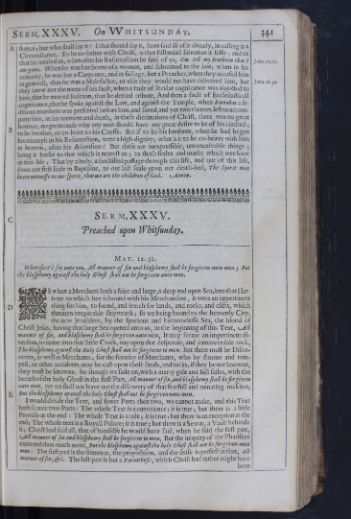 Serm. XXXV.
On Whitsunday.
341
stance; but who shall say it? I that should say it, have said ill of it already, in calling it a
Serm. XXXV.
On Whitsunday.
341
stance; but who shall say it? I that should say it, have said ill of it already, in calling it a
Circumstance. To be co-heires with Christ, is that Essentiall salvation it selfe; and to
that he intitled us, when after his Resurrection he said of us, John 20.17. Goe tell my brethren that I
am gone. When he was but borne of a woman, and submitted to the law, when in his
minority, he was but a Carpenter, and at full age, but a Preacher, when they accused him
in generall, that he was a Malefactor, or else they would not have delivered him, John 18.30. but
they knew not the name of his fault, when a fault of secular cognizance was objected to
him, that he moved sedition, that he denied tribute, And then a fault of Ecclesiasticall
cognizance, that he spoke against the Law, and against the Temple, when Barrabas a se-
ditious murderer was preferred before him, and saved, and yet two theeves left to accom-
pany him, in his torment and death, in these diminutions of Christ, there was no great
honour, no great cause why any man should have any great desire to be of his kindred;
to be brother, or co-heire to his Crosse. But if to be his brethren, when he had begun
his triumph in his Resurrection, were a high dignity, what is it to be co-heires with him
in heaven, after his Ascension? But these are inexpressible, unconceivable things;
bring it backe to that which is nearest us; to those seales and marks which wee have
in this life; That by a holy, a sanctified passage through this life, and out of this life,
from our first seale in Baptisme, to our last seale upon our death-bed, The Spirit may
beare witnesse to our spirit, that we are the children of God. Amen.
Serm. XXXV.
Preached upon Whitsunday.
Mat. 12.31.
Wherefore I say unto you, All manner of sin and blasphemy shall be forgiven unto men; But
the blasphemy against the holy Ghost shall not be forgiven unto men.
ASAs when a Merchant hath a faire and large, a deep and open Sea, into that Har-
bour to which hee is bound with his Merchandize, it were an impertinent
thing for him, to sound, and search for lands, and rocks, and clifts, which
threaten irreparable shipwrack; so we being bound to the heavenly City,
the new Jerusalem, by the spacious and bottomelesse Sea, the blood of
Christ Jesus, having that large Sea opened unto us, in the beginning of this Text, All
manner of sin, and blasphemy shall be forgiven unto men, It may seeme an impertinent di-
version, to turne into that little Creek, nay upon that desperate, and irrecoverable rock,
The blasphemy against the Holy Ghost shall not be forgiven to men. But there must be Disco-
verers, as well as Merchants; for the security of Merchants, who by storme and tem-
pest, or other accidents, may be cast upon those sands, and rocks, if they be not knowne,
they must be knowne. So though we faile on, with a merry gale and full sailes, with the
breath of the holy Ghost in the first Part, All manner of sin, and blasphemy shall be forgiven
unto men, yet we shall not leave out the discovery of that fearfull and ruinating rock too,
But the blasphemy against the holy Ghost shall not be forgiven unto men.
I would divide the Text, and fewer Parts then two, we cannot make, and this Text
hath scarce two Parts: The whole Text is a conveiance; it is true; but there is a little
Proviso at the end: The whole Text is a rule; it is true; but there is an exception at the
end; The whole text is a Royall Palace; it is true; but there is a Sewar, a Vault behinde
it; Christ had said all, that of himselfe he would have said, when he said the first part,
All manner of sin and blasphemy shall be forgiven to men, But the iniquity of the Pharisees
extorted thus much more, But the blasphemy against the holy Ghost shall not be forgiven unto
men: The first part is the sentence, the proposition, and the sense is perfect in that, All
manner of sin, &c. The last part is but a Parenthesis, which Christ had rather might have been
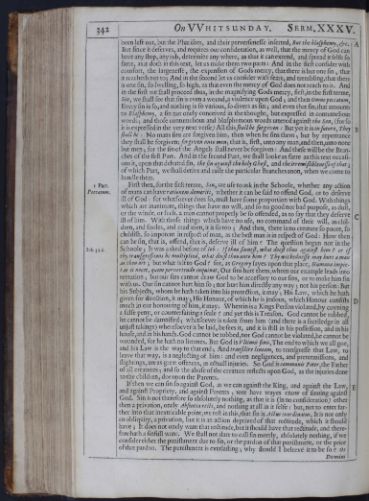 Serm. XXXV.
On Whitsunday.
342
been left out, but the Pharisees, and their perversenesse inserted, But the blasphemy, &c.
Serm. XXXV.
On Whitsunday.
342
been left out, but the Pharisees, and their perversenesse inserted, But the blasphemy, &c.
But since it deserves, and requires our consideration, as well, that the mercy of God can
have any stop, any rub, determine any where, as that it can extend, and spread it selfe so
farre, as it doth in this text, let us make them two parts: And in the first consider with
comfort, the largenesse, the expansion of Gods mercy, that there is but one sin, that
it reacheth not to; And in the second let us consider with feare, and trembling, that there
is one sin, so swelling, so high, as that even the mercy of God does not reach to it. And
in the first we shall proceed thus, in the magnifying Gods mercy, first, in the first terme,
Sin, we shall see that sin is even a wound, a violence upon God; and then Omne peccatum,
Every sin is so; and nothing is so various, so divers as sin; and even that sin, that amounts
to Blasphemy, a sin not onely conceived in the thought, but expressed in contumelious
words; and those contumelious and blasphemous words uttered against the Son, (for so
it is expressed in the very next verse) All this shall be forgiven: But yet it is in futuro, They
shall be: No mans sins are forgiven him, then when he sins them; but by repentance
they shall be forgiven; forgiven unto men; that is, first, unto any man, and then, unto none
but men; for the sin of the Angels shall never be forgiven: And these will be the Bran-
ches of the first Part. And in the second Part, we shall looke as farre as this text occasi-
ons it, upon that debated sin, the sin against the holy Ghost, and the irremissiblenesse of that;
of which Part, we shall derive and raise the particular Branches anon, when we come to
handle them.
First then, 1 Part. for the first terme, Sin, we use to ask in the Schoole, whether any action
of mans can havePeccatum. rationem demeriti, whether it can be said to offend God, or to deserve
ill of God: for whatsoever does so, must have some proportion with God. With things
which are inanimate, things that have no will, and so no good nor bad purpose, as dust,
or the winde, or such, a man cannot properly be so offended, as to say that they deserve
ill of him. With those things which have no use, no command of their will, as chil-
dren, and fooles, and mad men, it is so too; And then, there is no creature so poore, so
childish, so impotent in respect of man, as the best man is in respect of God: How then
can he sin, that is, offend, that is, deserve ill of him? The question begun not in the
Schoole;Iob 35.6. It was asked before of Iob: If thou sinnest, what doest thou against him? or if
thy transgressions be multiplied, what doest thou unto him? Thy wickednesse may hurt a man
as thou art; but what is it to God? for, as Gregory sayes upon that place, Humana impie-
tas ci nocet, quem pervertendo inquinat, Our sins hurt them, whom our example leads into
tentation; but our sins cannot draw God to be accessory to our sins, or to make him sin
with us. Our sin cannot hurt him so; nor hurt him directly any way; not his person: But
his Subjects, whom he hath taken into his protection, it may; His Law, which he hath
given for direction, it may; His Honour, of which he is jealous, which Honour consists
much in our honouring of him, it may. Wherein is a Kings Person violated, by coyning
a false peny, or counterfaiting a seale? and yet this is Treason. God cannot be robbed,
he cannot be damnified; whatsoever is taken from him (and there is a sacriledge in all
unjust takings) wheresoever it be laid, he sees it, and it is still in his possession, and in his
house, and in his hands. God cannot be robbed, nor God cannot be violated, he cannot be
wounded, for he hath no limmes. But God is Vltimis fin is, The end to which we all goe,
and his Law is the way to that end; And transilire lineam, to transgresse that Law, to
leave that way, is a neglecting of him: and even negligences, and pretermissions, and
slightings, are as great offences, as actuall injuries. So God is communis Pater, the Father
of all creatures; and so the abuse of the creature reflects upon God, as the injuries done
to the children, doe upon the Parents.
If then we can sin so against God, as we can against the King, and against the Law,
and against Propriety, and against Parents; wee have wayes enow of sinning against
God. Sin is not therefore so absolutely nothing, as that it is (in no consideration) other
then a privation, onely Absentia recti, and nothing at all in it selfe: but, not to enter far-
ther into that inextricable point, we rest in this, that sin is Actus inordinatus, It is not only
an obliquity, a privation, but it is an action deprived of that rectitude, which it should
have; It does not onely want that rectitude, but it should have that rectitude, and there-
fore hath a sinfull want. We shall not dare to call sin meerly, absolutely nothing, if we
consider either the punishment due to sin, or the pardon of that punishment, or the price
of that pardon. The punishment is everlasting; why should I beleeve it to be so? Os Dominidomini
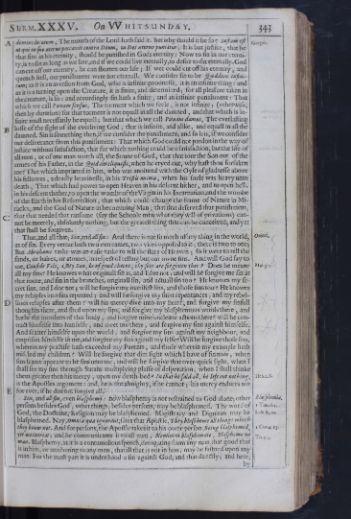 Serm. XXXV.
On Whitsunday.
343
domini locutum, The mouth of the Lord hath said it. But why should it be so?Gregor. Iustum est
Serm. XXXV.
On Whitsunday.
343
domini locutum, The mouth of the Lord hath said it. But why should it be so?Gregor. Iustum est
ut qui in suo æter no peccavit contra Deum, in Dei æterno puniatur, It is but justice, that he
that sins in his eternity, should be punished in Gods eternity: Now to sin in our eterni-
ty, is to sin as long as we live, and if we could live eternally, to desire to sin eternally. God
can cut off our eternity, he can shorten our life; If wee could cut off his eternity, and
quench hell, our punishment were not eternall. We consider sin to be Quoddam infini-
tum; as it is an aversion from God, who is infinite goodnesse, it is an infinite thing: and
as it is a turning upon the Creature, it is finite, and determined; for all pleasure taken in
the creature, is so: and accordingly sin hath a finite, and an infinite punishment: That
which we call Pœnam sensus, The torment which we feele, is not infinite; (otherwise,
then by duration) for that torment is not equall in all the damned, and that which is in-
finite must necessarily be equall; but that which we call Pœnam damni, The everlasting
losse of the sight of the everliving God, that is infinite, and alike, and equall in all the
damned. Sin is something then, if we consider the punishment; and so it is, if we consider
our deliverance from this punishment: That which God could not pardon in the way of
justice without satisfaction, that for which nothing could be a satisfaction, but the life of
all men, or of one man worth all, the Sonne of God, that that tore the Son out of the
armes of his Father, in the Quid dereliquisti, when he cryed out, why hast thou forsaken
me? That which imprinted in him, who was anointed with the Oyle of gladnesse above
his fellowes, a deadly heavinesse, in his Tristis anima, when his soule was heavy unto
death, That which had power to open Heaven in his descent hither, and to open hell,
in his descent thither, to open the wombe of the Virgin in his Incarnation, and the wombe
of the Earth in his Resurrection, that which could change the frame of Nature in Mi-
racles, and the God of Nature in becomming Man, that that deserved that punishment,
that that needed that ransome (say the Schoole men what they will of privations) can-
not be meerely, absolutely nothing, but the greatest thing that can be conceived, and yet
that shall be forgiven.
That, and all that; Sin, and all sin: And there is not so much Omne. of any thing in the world,
as of sin. Every vertue hath two extreames, two vices opposed to it; there is two to one;
But Abrahams taske was an easie taske to tell the stars of Heaven; so it were to tell the
sands, or haires, or atomes, in respect of telling but our owne sins. And will God say to
me, Confide Fili, My Son, be of good cheere, thy sins are forgiven thee?Mat. 9.2. Does he meane
all my sins? He knowes what originall sin is, and I doe not; and will he forgive me sin in
that roote, and sin in the branches, originall sin, and actuall sin too? He knowes my se-
cret sins, and I doe not; will he forgive my manifest sins, and those sins too? He knowes
my relapses into sins repented; and will he forgive my faint repentances, and my rebel-
lious relapses after them? will his mercy dive into my heart, and forgive my sinfull
thoughts there, and shed upon my lips, and forgive my blasphemous words there, and
bathe the members of this body, and forgive mine uncleane actions there? will he con-
tract himselfe into himselfe, and meet me there, and forgive my sins against himselfe,
And scatter himselfe upon the world, and forgive my sins against my neighbour, and
emprison himselfe in me, and forgive my sins against my selfe? Will he forgive those sins,
wherein my practise hath exceeded my Parents, and those wherein my example hath
mis-led my children? Will he forgive that dim sight which I have of sin now, when
sins scarce appeare to be sins unto me, and will he forgive that over-quick sight, when I
shall see my sins through Satans multiplying glasse of desperation, when I shall thinke
them greater then his mercy, upon my death bed? In that he said all, he left out nothing, Heb. 2.8
is the Apostles argument: and, he is not almighty, if he cannot; his mercy endures not
for ever, if he doe not forgive all.
Sin, and all sin, even blasphemy: now blasphemy is not restrained to God alone;Blasphemia. other
persons besides God, other things, besides persons, may be blasphemed.1 Tim. 6.1. The word of
God, the Doctrine, Religion may be blasphemed.Iude 8, 10. Magistracy and Dignities may be
blasphemed. Nay, Omnia quæ ignorant, saies that Apostle, They blaspheme all things which
they know not. And for persons, the Apostle takes it to his owne person, 1 Cor. 4.13. Being blasphemed,
yet we intreat; and he communicates it to all men, Neminem blasphemate, Tit. 3.2. Blaspheme no
man. Blasphemy, as it is a contumelious speech, derogating from any man, that good that
is in him, or attributing to any man, that ill that is not in him, may be fastned upon any
man. For the most part it is understood a sin against God, and that directly; and here, by
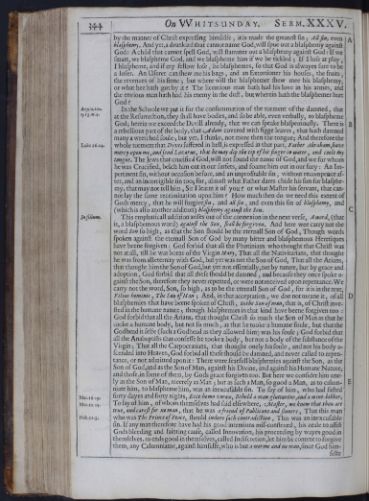 Serm. XXXV.
On Whitsunday.
344
by the manner of Christ expressing himselfe, it is made the greatest sin; All sin, even
Serm. XXXV.
On Whitsunday.
344
by the manner of Christ expressing himselfe, it is made the greatest sin; All sin, even
blasphemy. And yet, a drunkard that cannot name God, will spue out a blasphemy against
God: A child that cannot spell God, will stammer out a blasphemy against God: If we
smart, we blaspheme God, and we blaspheme him if we be tickled; If I lose at play,
I blaspheme, and if my fellow lose, he blasphemes, so that God is alwayes sure to be
a loser. An Usurer can shew me his bags, and an Extortioner his houses, the fruits,
the revenues of his sinne; but where will the blasphemer shew mee his blasphemy,
or what hee hath got by it? The licentious man hath had his love in his armes, and
the envious man hath had his enemy in the dust, but wherein hath the blasphemer hurt
God?
In the Schoole we put it for the consummation of the torment of the damned, Aquin. 221. that
at the Resurrection, q. 13. ar. 4. they shall have bodies, and so be able, even verbally, to blaspheme
God; herein we exceed the Devill already, that we can speake blaspemously. There is
a rebellious part of the body, that Adam covered with figge leaves, that hath damned
many a wretched soule; but yet, I thinke, not more then the tongue; And therefore the
whole torment that Dives suffered in hell, Luke 16.24. is expressed in that part, Father Abraham, have
mercy upon me, and send Lazarus, that he may dip the tip of his finger in water, and coole my
tongue. The Jews that crucified God, will not sound the name of God, and we for whom
he was Crucified, belch him out in our surfets, and foame him out in our fury: An Im-
pertinent sin, without occasion before, and an unprofitable sin, without recompence af-
ter, and an incorrigible sin too; for, almost what Father dares chide his son for blasphe-
my, that may not tell him, Sir I learnt it of you? or what Master his servant, that can-
not lay the same recrimination upon him? How much then do we need this extent of
Gods mercy, that he will forgive sin, and all sin, and even this sin of blasphemy, and
(which is also another addition) blasphemy against the Son.
This emphaticall addition arises out of the connexion in the next verse, In filium. A word, (that
is, a blasphemous word) against the Son, shall be forgiven. And here wee carry not the
word Son so high, as that the Son should be the eternall Son of God, Though words
spoken against the eternall Son of God by many bitter and blasphemous Heretiques
have beene forgiven: God forbid that all the Photinians who thought that Christ was
not at all, till he was borne of the Virgin Mary, That all the Nativitarians, that thought
he was from all eternity with God, but yet was not the Son of God, That all the Arians,
that thought him the Son of God, but yet not essentially, not by nature, but by grace and
adoption, God forbid that all these should be damned, and because they once spoke a-
gainst the Son, therefore they never repented, or were not received upon repentance. We
carry not the word, Son, so high, as to be the eternall Son of God, for it is in the text,
Filius hominis, The Son of Man; And, in that acceptation, we doe not meane it, of all
blasphemies that have beene spoken of Christ, as the Son of man, that is, of Christ inve-
sted in the humane nature; though blasphemies in that kind have beene forgiven too:
God forbid that all the Arians, that thought Christ so much the Son of Man as that he
tooke a humane body, but not so much, as that he tooke a humane soule, but that the
Godhead it selfe (such a Godhead as they allowed him) was his soule; God forbid that
all the Anabaptists that confesse he tooke a body, but not a body of the substance of the
Virgin; That all the Carpocratians, that thought onely his soule, and not his body a-
scended into Heaven, God forbid all these should be damned, and never called to repen-
tance, or not admitted upon it: There were fearfull blasphemies against the Son, as the
Son of God, and as the Son of Man, against his Divine, and against his Humane Nature,
and those, in some of them, by Gods grace forgiven too. But here we consider him one-
ly as the Son of Man, meerely as Man; but as such a Man, so good a Man, as to calum-
niate him, to blaspheme him, was an inexcusable sin. To say of him, who had fasted
forty dayes and forty nights, Mat. 11.19. Ecce homo vorax, Behold a man gluttonous, and a wine-bibber,
To say of him, Mar 12.14 of whom themselves had said elsewhere, Master, we know that thou art
true, and carest for no man, that he was a friend of Publicans and sinners, That this man
who was The Prince of Peace, Heb. 12.3. should indure such contradiction, This was an inexcusable
sin. If any man therefore have had his good intentions mis-construed, his zeale to assist
Gods bleeding and fainting cause, called Innovation, his proceeding by wayes good in
themselves, to ends good in themselves, called Indiscretion, let him be content to forgive
them, any Calumniator, against himselfe, who is but a worme and no man, since God him selfe
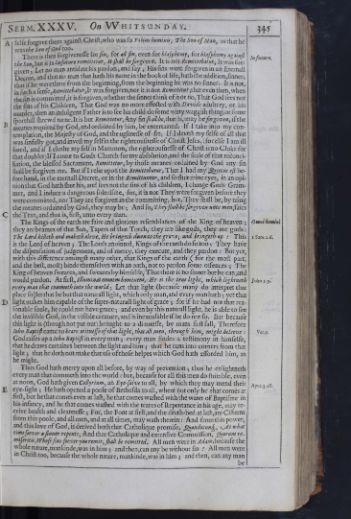 Serm. XXXV.
On Whitsunday.
345
selfe forgave them against Christ, who was so Filius hominis, The Son of Man, as that he
Serm. XXXV.
On Whitsunday.
345
selfe forgave them against Christ, who was so Filius hominis, The Son of Man, as that he
was the Son of God too.
There is then forgivenesse for sin, for all sin, even for blasphemy, for blasphemy against
the Son, but it is Infuturo remittetur, In futuro. It shall be forgiven. It is not Remittebatur, It was for-
given; Let no man antidate his pardon, and say, His sins were forgiven in an Eternall
Decree, and that no man that hath his name in the book of life, hath the addition, sinner;
that if he were there from the beginning, from the beginning he was no sinner. It is not,
in such a sense, Remittebatur, It was forgiven; nor it is not Remittitur, that even then, when
the sin is committed, it is forgiven, whether the sinner think of it or no, That God sees not
the sins of his Children, That God was no more affected with Davids adultery, or his
murder, then an indulgent Father is to see his child do some witty waggish thing, or some
sportfull shrewd turne. It is but Remittetur, Any sin shall be, that is, may be forgiven, if the
meanes required by God, and ordained by him, be entertained. If I take into my con-
templation, the Majesty of God, and the uglinesse of sin, If I devest my selfe of all that
was sinfully got, and invest my self in the righteousnesse of Christ Jesus, (for else I am ill
suted, and if I clothe myself in Mammon, the righteousnesse of Christ is no Cloke for
that doublet) If I come to Gods Church for my absolution, and the seale of that reconci-
liation, the blessed Sacrament, Remittetur, by those meanes ordained by God any sin
shall be forgiven me. But if I relie upon the Remittebatur, That I had my Quietus est be-
fore hand, in the eternall Decree, or in the Remittuntur, and so shut mine eyes, in an opi-
nion that God hath shut his, and sees not the sins of his children, I change Gods Gram-
mer, and I induce a dangerous solecisme, for, it is not They were forgiven before they
were committed, nor They are forgiven in the committing, but, They shall be, by using
the meanes ordained by God, they may be; And so, They shall be forgiven unto men, saies
the Text, and that is, first, unto every man.
The Kings of the earth are faire and glorious Omni homini resemblances of the King of heaven;
they are beames of that Sun, Tapers of that Torch, they are like gods, they are gods:
The Lord killeth and maketh alive, He bringeth down to the grave, and bringeth up:1 Sam. 2.6. This
is the Lord of heaven; The Lords anointed, Kings of the earth do so too; They have
the dispensation of judgement, and of mercy, they execute, and they pardon: But yet,
with this difference amongst many other, that Kings of the earth (for the most part,
and the best, most) binde themselves with an oath, not to pardon some offences; The
King of heaven sweares, and sweares by himselfe, That there is no sinner but he can, and
would pardon. At first, Illuminat omnem hominem, He is the true light, John 1.9. which lightneth
every man that commeth into the world; Let that light (because many do interpret that
place so) let that be but that naturall light, which only man, and every man hath; yet that
light makes him capable of the super-naturall light of grace; for if he had not that rea-
sonable soule, he could not have grace; and even by this naturall light, he is able to see
the invisible God, in the visible creature, and is inexcusable if he do not so. But because
this light is (though not put out) brought to a dimnesse, by mans first fall, Therefore
Iohn Baptist came toVer. 7. beare witnesse of that light, that all men, through him, might beleeve:
God raises up a Iohn Baptist in every man; every man findes a testimony in himselfe,
that he draws curtaines between the light and him; that he runs into corners from that
light; that he doth not make that use of those helpes which God hath afforded him, as
he might.
Thus God hath mercy upon all before, by way of prevention; thus he enlightneth
every man that commeth into the world: but, because for all this men do stumble, even
at noon, God hath given Collyrium, an Eye-salve to all, Apoc. 3.18. by which they may mend their
eye-sight; He hath opened a poole of Bethesda to all, where not only he that comes at
first, but he that comes even at last, he that comes washed with the water of Baptisme in
his infancy, and he that comes washed with the teares of Repentance in his age, may re-
ceive health and cleannesse; For, the Font at first, and the death-bed at last, are Cisterns
from this poole, and all men, and at all times, may wash therein: And from this power,
and this love of God, is derived both that Catholique promise, Quandocun{que}, At what
time soever a sinner repents, And that Catholique and extensive Commission, Quorum re-
miseritis, Whose sins soever you remit, shall be remitted. All men were in Adam; because the
whole nature, mankinde, was in him; and then, can any be without sin? All men were
in Christ too, because the whole nature, mankinde, was in him; and then, can any man be
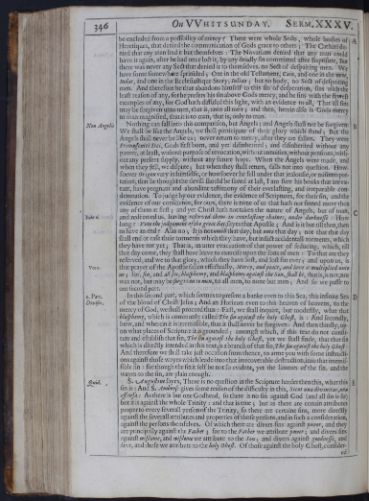 Serm. XXXV.
On Whitsunday.
346
be excluded from a possibility of mercy? There were whole Sects, whole bodies of
Serm. XXXV.
On Whitsunday.
346
be excluded from a possibility of mercy? There were whole Sects, whole bodies of
Heretiques, that denied the communication of Gods grace to others; The Cathari de-
nied that any man had it but themselves: The Novatians denied that any man could
have it again, after he had once lost it, by any deadly sin committed after Baptisme, But
there was never any Sect that denied it to themselves, no Sect of despairing men. We
have some somewhere sprinkled; One in the old Testament, Cain, and one in the new,
Iudas, and one in the Ecclesiastique Story, Iulian; but no body, no Sect of despairing
men. And therefore he that abandons himself to this sin of desperation, sins with the
least reason of any, for he prefers his sin above Gods mercy, and he sins with the fewest
examples of any, for God hath diffused this light, with an evidence to all, That all sins
may be forgiven unto men, that is, unto all men; and then, herein also is Gods mercy
to man magnified, that it is to man, that is, only to man.
Nothing can fall into this comparison, Non Angelis but Angels; and Angels shall not be forgiven:
We shall be like the Angels, we shall participate of their glory which stand; But the
Angels shall never be like us; never return to mercy, after they are fallen. They were
Primogeniti Dei, Gods first born, and yet disinherited; and disinherited without any
power, at least, without purpose of revocation, without annuities, without pensions, with-
out any present supply, without any future hope. When the Angels were made, and
when they fell, we dispute; but when they shall return, falls not into question. How-
soever Origen vary in himselfe, or howsoever he fell under that jealousie, or misinterpre-
tation, that he thought the devill should be saved at last, I am sure his books that are ex-
tant, have pregnant and abundant testimony of their everlasting, and irreparable con-
demnation. To judge by our evidence, the evidence of Scriptures, for their sin, and the
evidence of our conscience, for ours, there is none of us that hath not sinned more then
any of them at first; and yet Christ hath not taken the nature of Angels, but of man,
and redeemed us, Iude 6. having reserved them in everlasting chaines, under darknesse: How
long? Vnto the judgement of the great day, sayes that Apostle; And is it but till then, then
to have an end? Alas no; It is not untill that day, but unto that day; not that that day
shall end or ease their torments which they have, but inflict accidentall torments, which
they have not yet; That is, an utter evacuation of that power of seducing, which, till
that day come, they shall have leave to exercise upon the sons of men: To that are they
reserved, and we to that glory, which they have lost, and lost for ever; and upon us, is
that prayer of the Apostle fallen effectually, Ver. 2. Mercy, and peace, and love is multiplied unto
us; for, sin, and all sin, blasphemy, and blasphemy against the Son, shall be, that is, is not, nor
was not, but may be forgiven to men, to all men, to none but men; And so we passe to
our second part.
In this second part, 2. Part. which seemes to present a banke even to this Sea, this infinite Sea
of the blood of Christ Jesus; Divisio. And an Horizon even to this heaven of heavens, to the
mercy of God, we shall proceed thus: First, we shall inquire, but modestly, what that
blasphemy, which is commonly called The sin against the holy Ghost, is: And secondly,
how, and wherein it is irremissible, that it shall never be forgiven: And then thirdly, up-
on what places of Scripture it is grounded; amongst which, if this text do not consti-
tute and establish that sin, The sin against the holy Ghost, yet we shall finde, that that sin
which is directly intended in this text, is a branch of that sin, The sin against the holy Ghost:
And therefore we shall take just occasion from thence, to arme you with some instructi-
ons against those wayes which leade into that irrecoverable destruction, into that irremis-
sible sin: for though the sin it self be not so evident, yet the limmes of the sin, and the
wayes to the sin, are plain enough.
S. Augustine sayes, Quid. There is no question in the Scripture harder then this, what this
sin is: And S. Ambrose gives some reason of the difficulty in this, Sicut una divinitas, una
offensa: As there is but one Godhead, so there is no sin against God (and all sin is so)
but it is against the whole Trinity: and that is true; but as there are certain attributes
proper to every severall person of the Trinity, so there are certaine sins, more directly
against the severall attributes and properties of those persons, and in such a consideration,
against the persons themselves. Of which there are divers sins against power, and they
are principally against the Father; for to the Father we attribute power; and divers sins
against wisdome, and wisdome we attribute to the Son; and divers against goodnesse, and
love, and these we attribute to the holy Ghost. Of those against the holy Ghost, consider ed
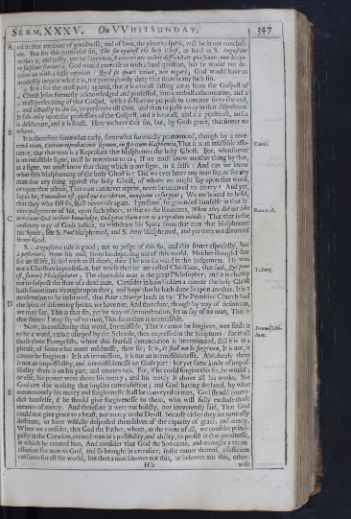 Serm. XXXV.
On Whitsunday.
347
ed in that attribute of goodnesse, and of love, the place to speak, will be in our conclusi-
Serm. XXXV.
On Whitsunday.
347
ed in that attribute of goodnesse, and of love, the place to speak, will be in our conclusi-on. But for this particular sin, The sin against the holy Ghost, as hard as S. Augustine
makes it, and justly, yet he sayes too, Exercere nos voluit difficultate quæstionis, non decipe-
re falsitate sententiæ, God would exercise us with a hard question, but he would not de-
ceive us with a false opinion: Quid sit quæri voluit, non negari; God would have us
modestly inquire what it is, not peremptorily deny that there is any such sin.
It is (for the most part) agreed, that it is a totall falling away from the Gospell of
Christ Jesus formerly acknowledged and professed, into a verball calumniating, and a
reall persecuting of that Gospel, with a deliberate purpose to continue so to the end,
and actually to do so, to persevere till then, and then to passe away in that disposition.
It fals only upon the professors of the Gospell, and it is totall, and it is practicall, and it
is deliberate, and it is finall. Here we have that sin, but, by Gods grace, that sinner no
where.
It is therefore somewhat early, somewhat forwardly pronounced, though by a reve-
rend man, Certum reprobationis signum, in spiritum blasphemia, Calvin. That it is an infallible assu-
rance, that that man is a Reprobate that blasphemes the holy Ghost. For, whatsoever
is an infallible signe, must be notorious to us; If we must know another thing by that,
as a signe, we must know that thing which is our signe, in it selfe: And can we know
what this blaspheming of the holy Ghost is? Did we ever heare any man say, or see any
man doe any thing against the holy Ghost, of whom we might say upon that word,
or upon that action, This man can never repent, never be received to mercy? And yet,
sayes he, Tenendum est, quod qui exciderint, nunquam resurgent; We are bound to hold,
that they who fall so, shall never rise again. I presume, he grounded himselfe in that se-
vere judgement of his, upon such places, as that to the Romanes, Rom. 1.28. When they did not like
to retaine God in their knowledge, God gave them over to a reprobate minde: That that is the
ordinary way of Gods justice, to withdraw his Spirit from that man that blasphemes
his Spirit; but S. Paul blasphemed, and S. Peter blasphemed, and yet were not divorced
from God.
S. Augustines rule is good; not to judge of this sin, and this sinner especially, but
à posteriori, from his end, from his departing out of this world. Neither though I doe
see an ill life, sealed with an ill death, dare I be too forward in this judgement. He was
not a Christian in profession, but worse then he are called Christians, that said, Qui pius
est, summè Philosophatur; The charitable man is the great Philosopher;Trismeg. and it is charity
not to suspect the state of a dead man. Consider in how sudden a minute the holy Ghost
hath sometimes wrought upon thee; and hope that he hath done so upon another. It is a
moderation to be imbraced, that Peter Martyr leads us to: The Primitive Church had
the spirit of discerning spirits; we have not; And therefore, though by way of definition,
we may say, This is that sin, yet by way of demonstration, let us say of no man, This is
that sinner: I may say of no man, This sin in thee is irremissible.
Now, in considering this word, Irremissible, That it cannot be forgiven, wee finde it
to be a word, rather usurped by the Schoole, then expressed in the Scriptures:Irremissibi-
litas. for in all
those three Euangelists, where this fearfull denunciation is interminated, still it is in a
phrase, of somewhat more mildnesse, then so; It is, It shall not be forgiven, It is not, it
cannot be forgiven: It is an irremission, it is not an irremissiblenesse. Absolutely
there is not an impossibility, and irremissiblenesse on Gods part: but yet some kinde of impos-
sibility there is on his part, and on ours too. For, if he could forgive this sin, he would;
or else, his power were above his mercy; and his mercy is above all his works. But
God can doe nothing that implies contradiction; and God having declared, by what
meanes onely his mercy and forgivenesse shall be conveyed to man, God should contra-
dict himselfe, if he should give forgivenesse to them, who will fully exclude those
meanes of mercy. And therefore it were not boldly, nor irreverently said, That God
could not give grace to a beast, nor mercy to the Devill, because either they are naturally
destitute, or have wilfully despoiled themselves of the capacity of grace, and mercy.
When we consider, that God the Father, whom, as the roote of all, we consider princi-
pally in the Creation, created man in a possibility, and ability, to persist in that goodnesse,
in which he created him, And consider that God the Son came, and wrought a recon-
ciliation for man to God, and so brought in a treasure, in the nature thereof, a sufficient
ransome for all the world, but then a man knowes not this, or beleeves not this, other Hh wise
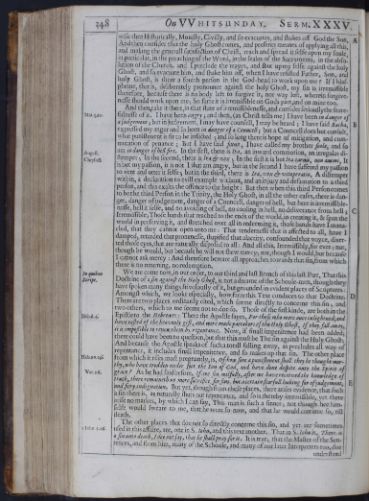 Serm. XXXV.
On Whitsunday.
348
wise then Historically, Morally, Civilly, and so evacuates, and shakes off God the Son,
Serm. XXXV.
On Whitsunday.
348
wise then Historically, Morally, Civilly, and so evacuates, and shakes off God the Son,
And then consider that the holy Ghost comes, and presents meanes of applying all this,
and making the generall satisfaction of Christ, reach and spread it selfe upon my soule,
in particular, in the preaching of the Word, in the seales of the Sacraments, in the abso-
lution of the Church, and I preclude the wayes, and shut up my selfe against the holy
Ghost, and so evacuate him, and shake him off, when I have resisted Father, Son, and
holy Ghost, is there a fourth person in the God-head to work upon me? If I blas-
pheme, that is, deliberately pronounce against the holy Ghost, my sin is irremissible
therefore, because there is no body left to forgive it, nor way left, wherein forgive-
nesse should work upon me; So farre it is irremissible on Gods part, and on mine too.
And then, take it there, in that state of irremissiblenesse, and consider seriously the feare-
fulnesse of it.Mat. 5.22. I have been angry; and then, (as Christ tells me) I have been in danger of
a judgement; but in judgement, I may have counsell, I may be heard; I have said Racha,
expressed my anger and so been in danger of a Councell; but a Councell does but consult,
what punishment is fit to be inflicted; and so long there is hope of mitigation, and com-
mutation of penance; But I have said fatue, I have called my brother foole, and so
am in danger of hell fire.August. In the first, there is Ira, an inward commotion, an irregular di-
stemper; In the second, Chrysost. there is Ira & vox; In the first it is but Ira carnis, non animi, It
is but my passion, it is not I that am angry, but in the second I have suffered my passion
to vent and utter it selfe; but in the third, there is Ira, vox & vituperatio, A distemper
within, a declaration to evill example without, and an injury and defamation to a third
person, and this exalts the offence to the height: But then when this third Person comes
to be the third Person in the Trinity, the Holy Ghost, in all the other cases, there is dan-
ger, danger of judgement, danger of a Councell, danger of hell, but here is irremissible-
nesse, hell it selfe, and no avoiding of hell, no cooling in hell, no deliverance from hell;
Irremissible; Those hands that reached to the ends of the world, in creating it, & span the
world in preserving it, and stretched over all in redeeming it, those hands have I mana-
cled, that they cannot open unto me: That tendernesse that is affected to all, have I
damped, retarded that pronenesse, stupified that alacrity, confounded that voyce, diver-
ted those eyes, that are naturally disposed to all: And all this, Irremissibly, for ever; not,
though he would, but because he will not shew mercy; not, though I would, but because
I cannot ask mercy: And therefore beware all approaches towards that sin, from which
there is no returning, no redemption.
We are come now, In quibus in our order, to our third and last Branch of this last Part, That this
Doctrine of a sin against the Holy Ghost, Script. is not a dreame of the Schoole-men, though they
have spoken many things frivolously of it, but grounded in evident places of Scriptures:
Amongst which, we looke especially, how farre this Text conduces to that Doctrine.
There are two places ordinarily cited, which seeme directly to concerne this sin; and
two others, which to me seeme not to doe so. Those of the first kinde, are both in the
Epistle to the Hebrewes:Heb. 6.4. There the Apostle sayes, For those who were once inlightned, and
have tasted of the heavenly gift, and were made partakers of the Holy Ghost, If they fall away,
it is impossible to renew them by repentance. Now, if finall impenitence had been added,
there could have been no question, but that this must be The sin against the Holy Ghost;
And because the Apostle speaks of such a totall falling away, as precludes all way of
repentance, it includes finall impenitence, and so makes up that sin. The other place
from which it rises most pregnantly, Heb. 10.29. is, Of how sore a punishment shall they be thought wor-
thy, who have trodden under foot the Son of God, and have done despite unto the Spirit of
grace?Ver. 26. As he had said before, If we sin wilfully, after we have received the knowledge of
truth, there remaineth no more sacrifice for sins, but a certain fearfull looking for of judgement,
and fiery indignation. But yet, though from these places, there arises evidence, that such
a sin there is, as naturally shuts out repentance, and so is thereby irremissible, yet there
arise no markes, by which I can say, This man is such a sinner; not though hee him-
selfe would sweare to me, that he were so now, and that he would continue so, till
death.
The other places that doe not so directly concerne this sin, and yet are sometimes
used in this affaire, 1 Iohn 5.16. are, one in S. Iohn, and this text another. That in S. Iohn is, There is
a sin unto death, I doe not say, that he shall pray for it. It is true, that the Master of the Sen-
tences, and from him, many of the Schoole, and many of our later Interpreters too, doe understand
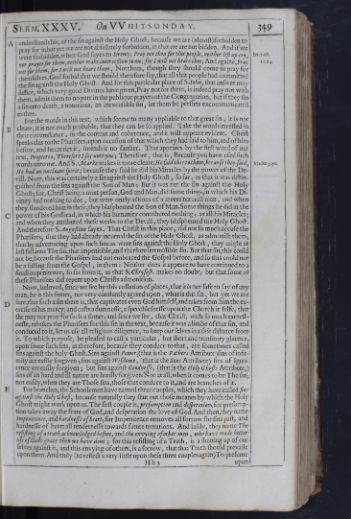 Serm. XXXV.
On Whitsunday.
349
understand this, of the sin against the Holy Ghost, because we are (almost) forbidden to
Serm. XXXV.
On Whitsunday.
349
understand this, of the sin against the Holy Ghost, because we are (almost) forbidden to
pray for it; but yet we are not absolutely forbidden, in that we are not bidden. And if we
were forbidden, when God sayes to Ieremy, Pray not thou for this people, neither lift up cry,
Ier. 7.16. nor prayer for them, neither make intercession to me, for I will not heare thee, And againe, Pray
not for them, for I will not heare them, Not them, though they should come to pray for 11.14.
themselves, God forbid that we should therefore say, that all that people had committed
the sin against the Holy Ghost. And for this particular place of S. Iohn, that answer may
suffice, which very good Divines have given, Pray not for them, is indeed pray not with
them, admit them to no part in the publique prayers of the Congregation, but if they sin
a sin unto death, a notorious, an inexcusable sin, let them be persons excommunicated
to thee.
For the words in this text, which seeme to many appliable to that great sin, it is not
cleare, it is not much probable, that they can be so applied. Take the words invested in
their circumstance, in the context and coherence, and it will appeare evident. Christ
speaks this to the Pharisees, upon occasion of that which they had said to him, and of him
before, and he carries it, intends it no farther. That appeares by the first word of out
text, Propterea, Therefore I say unto you; Therefore, that is, Because you have used such
words unto me. And S. Marke makes it more cleare, Marke 3.30. He said this to them, because they said,
He had an uncleane spirit; because they said he did his Miracles by the power of the De-
vill. Now, this was certainely a sin against the Holy Ghost, so far, as that it was distin-
guished from the sins against the Son of Man; But it was not the sin against the Holy
Ghost; for, Christ being a mixt person, God and Man, did some things, in which his Di-
vinity had nothing to doe, but were onely actions of a meere naturall man, and when
they slandered him in these, they blasphemed the Son of Man. Some things he did in the
power of his God head, in which his humanity contributed nothing; as all his Miracles;
and when they attributed these works to the Devill, they blasphemed the Holy Ghost.
And therefore S. Augustine sayes, That Christ in this place, did not so much accuse the
Pharisees, that they had already incurred the sin of the Holy Ghost, as admonish them,
that by adventuring upon such sins as were sins against the Holy Ghost, they might at
last fall into The sin, that impenitible, and therfore irremissible sin. But that sin, this could
not be, because the Pharisees had not embraced the Gospel before, and so this could not
be a falling from the Gospel, in them: Neither does it appeare to have continued to a
finall impenitence; so far from it, as that S. Chrysost. makes no doubt, but that some of
these Pharisees did repent upon Christs admonition.
Now, beloved, since we see by this collation of places, that it is not safe to say of any
man, he is this sinner, nor very constantly agreed upon, what is this sin, but yet we are
sure, that such a sin there is, that captivates even God himself, and takes from him the ex-
ercise of his mercy, and casts a dumnesse, a speechlesnesse upon the Church it selfe, that
she may not pray for such a sinner; and since we see, that Christ, with so much earnest-
nesse, rebukes the Pharisees for this sin in the text, because it was a limbe of that sin, and
conduced to it, let us use all religious diligence, to keep our selves in a safe distance from
it. To which purpose, be pleased to cast a particular, but short and transitory glaunce,
upon some such sins, as therefore, because they conduce to that, are sometimes called
sins against the holy Ghost. Sins against Power, (that is the Fathers Attribute) sins of infir-
mity are easily forgiven; sins against Wisdome, (that is the Sons Attribute) sins of Igno-
rance are easily forgiven; but sins against Goodnesse, (that is the Holy Ghosts Attribute,)
sins of an hard and ill nature are hardly forgiven: Not at all, when it comes to be The sin;
not easily, when they are Those sins, those that conduce to it, and are branches of it.
For branches, the Schoolemen have named three couples, which they have called sins
against the Holy Ghost, because naturally they shut out those meanes by which the Holy
Ghost might work upon us. The first couple is, presumption and desperation; for presump-
tion takes away the feare of God, and desperation the love of God. And then, they name
Impenitence, and hardnesse of heart; for Impenitence removes all sorrow for sins past, and
hardnesse of heart all tendernesse towards future tentations. And lastly, they name The
resisting of a truth acknowledged before, and the envying of other men, who have made better
use of Gods grace then we have done; for this resisting of a Truth, is a shutting up of our
selves against it, and this envying of others, is a sorrow, that that Truth should prevaile
upon them. And truly (to reflect a very little upon these three couples again) To presume Hh2 upon
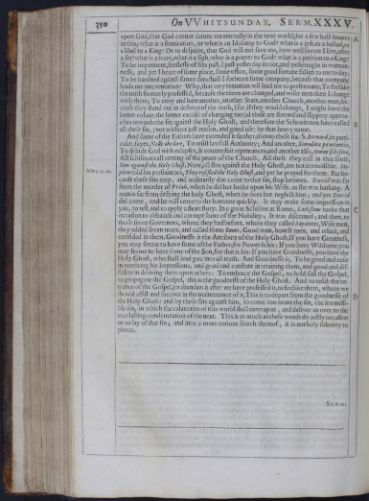 Serm. XXXV.
On Whitsunday.
350
upon God, that God cannot damne me eternally in the next world, for a few half-houres
Serm. XXXV.
On Whitsunday.
350
upon God, that God cannot damne me eternally in the next world, for a few half-houres
in this; what is a fornication, or what is an Idolatay to God? what is a jest, or a ballad, or
a libel to a King? Or to despaire, that God will not save me, how well soever I live, after
a sin? what is a teare, what is a sigh, what is a prayer to God? what is a petition to a King?
To be impenitent, senslesse of sins past; I past yesterday in riot, and yesternight in wanton-
nesse, and yet I heare of some place, some office, some good fortune fallen to me to day;
To be hardned against future sins; shall I forbeare some company, because that company
leads me into tentation? Why, that very tentation wil lead me to preferment; To forsake
the truth formerly professed, because the times are changed, and wiser men then I change
with them; To envy and hate another, another State, another Church, another man, be-
cause they stand out in defence of the truth, (for, if they would change, I might have the
better colour, the better excuse of changing too) al these are shrewd and slippery approa-
ches towards the sin against the Holy Ghost, and therefore the Schoolemen have called
all these six, (not without just reason, and good use) by that heavy name.
And some of the Fathers have extended it farther, then to these six. S. Bernard, in parti-
cular, sayes, Nolle obedire, To resist lawfull Authority; And another, Simulata pœnitentia
To delude God with relapses, & counterfait repentances; and another also, Omne schisma,
All schismaticall renting of the peace of the Church, All these they call in that sense,
Sins against the Holy Ghost. Now, all sins against the Holy Ghost, are not irremissible. Ste-
phen told his persecutors, Acts 7.51.60. They resisted the Holy Ghost, and yet he prayed for them. But be-
cause these sins may, and ordinarily doe come to that sin, stop betimes. David was far
from the murder of Vriah, when he did but looke upon his Wife, as she was bathing. A
man is far from defying the holy Ghost, when he does but neglect him; and yet David
did come, and he will come to the bottome quickly. It may make some impression in
you, to tell, and to apply a short story. In a great Schisme at Rome, Ladislaus tooke that
occasion to debauch and corrupt some of the Nobility; It was discerned; and then, to
those seven Governors, whom they had before, whom they called Sapientes, Wise men,
they added seven more, and called them Bonos, Good men, honest men, and relied, and
confided in them. Goodnesse is the Attribute of the Holy Ghost; If you have Greatness,
you may seeme to have some of the Father, for Power is his: If you have Wisdome, you
may seeme to have some of the Son, for that is his: If you have Goodnesse, you have the
Holy Ghost, who shall lead you into all truth. And Goodnesse is, To be good and easie
in receiving his impressions, and good and constant in retaining them, and good and dif-
fusive in deriving them upon others: To embrace the Gospel, to hold fast the Gospel,
to propagate the Gospel, this is the goodnesse of the Holy Ghost. And to resist the en-
trance of the Gospel, to abandon it after we have professed it, to forsake them, whom we
should assist and succour in the maintenance of it, This is to depart from the goodnesse of
the Holy Ghost: and by these sins against him, to come too neare the sin, the irremissi-
ble sin, in which the calamities of this world shall enwrap us, and deliver us over to the
everlasting condemnation of the next. This is as much as these words do justly occasion
us to say of that sin; and into a more curious search thereof, it is not holy sobriety to
pierce. Serm.
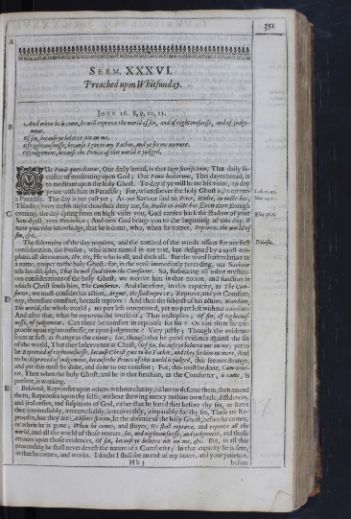 351
351
Serm. XXXVI.
Preached upon Whitsunday.
John 16.8, 9, 10, 11.
And when he is come, he will reprove the world of sin, and of righteousnesse, and of judge-
ment.
Of sin, because ye belceve not on me.
Of righteousnesse, because I goe to my Father, and ye see me no more.
Of judgement, because the Prince of this world is judged.
OUrOur Panis quotidianus, Our daily bread, is that Iuge sacrificium, That daily sa-
crifice of meditating upon God; Our Panis hodiernus, This dayes bread, is
to meditate upon the holy Ghost. To day if ye will heare his voice, to day
ye are with him in Paradise; For, wheresoever the holy Ghost is, Luk. 23.43. he creates
a Paradise. The day is not past yet; As our Saviour said to Peter, Hodie, in nocte hac,
Mar. 14.10. This day, even in this night thou shalt deny me, so, Hodie in nocte hac, Even now, though
evening, the day-spring from on high visits you, Esay 38.8. God carries back the shadow of your
Sun-dyall, as to Hezechias; And now God brings you to the beginning of this day, if
now you take knowledge, that he is come, who, when he comes, Reproves the world of
sin, &c.
The solemnity of the day requires, Divisio. and the method of the words offers for our first
consideration, the Person; who is not named in our text, but designed by a most em-
phaticall denotation, Ille, He, He who is all, and doth all. But the word hath relation to
a name, proper to the holy Ghost: for, in the verse immediatly preceding, our Saviour
tels his disciples, That he will send them the Comforter. So, forbearing all other mysteri-
ous considerations of the holy Ghost, we receive him in that notion, and function in
which Christ sends him, The Comforter. And therefore, in this capacity, as The Com-
forter, we must consider his action, Arguet, He shall reprove; Reprove, and yet Comfort;
nay, therefore comfort, because reprove: And then the subject of his action, Mundum,
The world, the whole world; no part left unreproved, yet no part left without comfort:
And after that, what he reproves the world of; That multiplies; Of sin, of righteous-
nesse, of judgement. Can there be comfort in reproofe for sin? Or can there lie a re-
proofe upon righteousnesse, or upon judgement? Very justly; Though the evidence
seem at first, as strange as the crime; for, though that be good evidence against the sin
of the world, That they beleeve not in Christ, (Of sin, because ye beleeve not on me) yet to
be Reproved of righteousnesse, because Christ goes to his Father, and they see him no more, And
to be Reproved of judgement, because the Prince of this world is judged, this seemes strange,
and yet this must be done, and done to our comfort; For, this must be done, Cum vene-
rit, Then when the holy Ghost, and he in that function, as the Comforter, is come, is
present, is working.
Beloved, Reproofes upon others without charity, rather to defame them, then amend
them, Reproofes upon thy selfe, without shewing mercy to thine own soule, diffidences,
and jealousies, and suspitions of God, either that he hated thee before thy sin, or hates
thee irremediably, irreconciliably, irrecoverably, irreparably for thy sin, These are Re-
proofes, but they are Absente spiritu, In the absence of the holy Ghost, before he comes,
or when he is gone; When he comes, and stayes, He shall reprove, and reprove all the
world, and all the world of those errours, sin, and righteousnesse, and judgement, and those
errours upon those evidences, Of sin, because ye beleeve not on me, &c. But, in all this
proceeding he shall never devest the nature of a Comforter; In that capacity he is sent,
in that he comes, and works. I doubt I shall see an end of my houre, and your patience, Hh3before
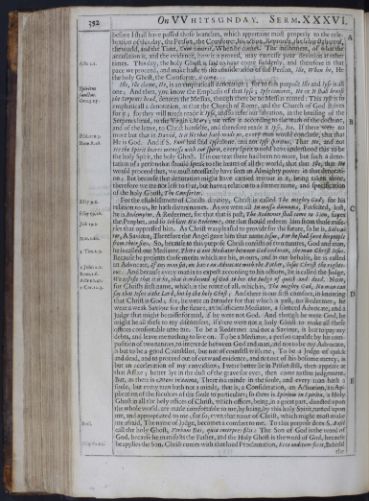 352
On Whitsunday.
Serm. XXXVI.
before I shall have passed those branches, which appertaine most properly to the cele-
352
On Whitsunday.
Serm. XXXVI.
before I shall have passed those branches, which appertaine most properly to the cele-bration of this day, the Person, the Comforter, his action, Reproofe, the subject thereof,
the world, and the Time, Cum venerit, When he comes. The inditement, of what the
accusation is, and the evidence, how it is proved, may exercise your devotion at other
times.Acts 2.2. This day, the holy Ghost is said to have come suddenly, and therefore in that
pace we proceed, and make haste to the consideration of the Person, Ille, When he, He
the holy Ghost, the Comforter, is come.
Ille,Spiritus sanctus. Ille alone, He, is an emphaticall denotation; for to this purpose Ille and Ipse is all
one; Gen. 3.15. And then, you know the Emphasis of that Ipse; Ipse conteret, He or It shall bruise
the Serpents head, denotes the Messias, though there be no Messias named: This Ipse is so
emphaticall a denotation, as that the Church of Rome, and the Church of God strives
for it; for they will needs reade it Ipsa, and so refer our salvation, in the bruising of the
Serpents head, to the Virgin Mary; we refer it according to the truth of the doctrine,
and of the letter, to Christ himselfe, and therefore reade it Ipse, He. If there were no
more but that in David, Psal. 100.3. It is He that hath made us, every man would conclude, that that
He is God. Rom. 8.16. And if S. Paul had said Ipse alone, and not Ipse spiritus, That He, and not
He the Spirit beares witnesse with our spirit, every spirit would have understood this to be
the holy Spirit, the holy Ghost. If in our text there had been no more, but such a deno-
tation of a person that should speak to the hearts of all the world, that that Ille, that He
would proceed thus, we must necessarily have seen an Almighty power in that denotati-
on; But because that denotation might have carried terrour in it, being taken alone,
therefore we are not left to that, but have a relation to a former name, and specification
of the holy Ghost, The Comforter.
For the establishment of Christs divinity, Esay 9.6. Christ is called The mighty God; for his
relation to us, he hath divers names. As we were all In massa damnata, Forfeited, lost,
he is Redemptor,Esay 59.20. A Redeemer, for that that is past, The Redeemer shall come to Sion, sayes
the Prophet, Job 19.2. and so Iob saw His Redeemer, one that should redeem him from those mise-
ries that oppressed him. As Christ was pleased to provide for the future, so he is, Salva-
tor,Mat. 1.21. A Saviour, Therefore the Angel gave him that name Iesus, For he shall save his people
from their sins. So, because to this purpose Christ consists of two natures, God and man,
he is called our Mediator, 1 Tim. 2.5. There is one Mediator between God and man, the man Christ Iesus.
Because he presents those merits which are his, as ours, and in our behalfe, he is called
an Advocate, 1 John 2.1. If any man sin, we have an Advocate with the Father, Iesus Christ the righte-
ous. Rom. 2.6. And because every man is to expect according to his actions, he is called the Judge,
Acts 10.42. We testifie that it is he, that is ordained of God to bee the Iudge of quick and dead. Now,
for Christs first name, which is the roote of all, which is, The mighty God, No man can 1 Cor. 12.3.
say that Iesus is the Lord, but by the holy Ghost; And there is our first comfort, in knowing
that Christ is God; for, he were an Intruder for that which is past, no Redeemer, he
were a weak Saviour for the future, an insufficient Mediator, a silenced Advocate, and a
Judge that might be misinformed, if he were not God. And though he were God, he
might be all these to my discomfort, if there were not a holy Ghost to make all these
offices comfortable unto me. To be a Redeemer and not a Saviour, is but to pay my
debts, and leave me nothing to live on. To be a Mediator, a person capable by his com-
position of two natures, to intercede between God and man, and not to be my Advocate,
is but to be a good Counsellor, but not of counsell with me; To be a Judge of quick
and dead, and to proceed out of outward evidence, and not out of his bosome mercy, is
but an acceleration of my conviction; I were better lie in Prison still, then appeare at
that Assize; better lye in the dust of the grave for ever, then come to that judgement.
But, as there is Mens in anima, There is a minde in the soule, and every man hath a
soule, but every man hath not a minde, that is, a Consideration, an Actuation, an Ap-
plication of the faculties of the soule to particulars; so there is Spiritus in Spiritu, a Holy
Ghost in all the holy offices of Christ, which offices, being, in a great part, directed upon
the whole world, are made comfortable to me, by being, by this holy Spirit, turned upon
me, and appropriated to me; for so, even that name of Christ, which might most make
me afraid, Basil. The name of Judge, becomes a comfort to me. To this purpose does S. Baesil
call the holy Ghost, Verbum Dei, quia interpres filii: The Son of God is the word of
God, because he manifests the Father, and the Holy Ghost is the word of God, because
he applies the Son.Esay 62.11. Christ comes with that loud Proclamation, Ecce auditum fecit, Behold the
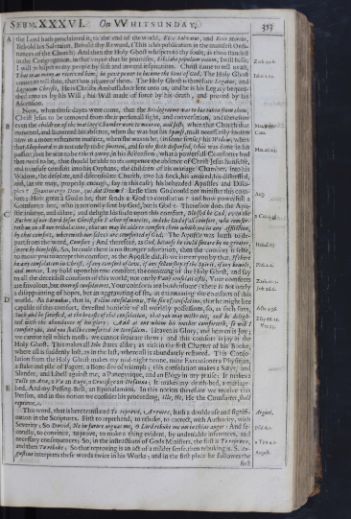 On Whitsunday.
353
the Lord hath proclaimed it, to the end of the world, Ecce Salvator, and Ecce Merces,
On Whitsunday.
353
the Lord hath proclaimed it, to the end of the world, Ecce Salvator, and Ecce Merces,
Behold his Salvation, Behold thy Reward, (This is his publication in the manifest Ordi-
nances of the Church) And then the Holy Ghost whispers to thy soule, as thou standest
in the Congregation, in that voyce that he promises, Sibilabo populum meum, I will hisse,
Zach. 10.8. I will whisper to my people by soft and inward inspirations. Christ came to tell us all,
That to as many as received him, he gave power to become the Sons of God,Iohn 1.12. The Holy Ghost
comes to tell thee, that thou art one of them. The Holy Ghost is therefore Legatus, and
Legatum Christi, He is Christs Ambassadour sent unto us, and he is his Legacy bequea-
thed unto us by his Will; his Will made of force by his death, and proved by his
Ascension.
Now, when those dayes were come, that the Bridegroome was to bee taken from them,
Christ Jesus to be removed from their personall sight, and conversation, and therefore
even the children of the mariage Chamber were to mourne, and fast;Mat. 9.15. when that Church that
mourned, and lamented his absence, when she was but his Spouse, must necessarily mourn Cant.
now in a more vehement manner, when she was to be, (in some sense) his Widow; when
that Shepheard was not onely to be smitten, and so the flock dispersed,Mat. 26.21. (this was done in his
passion) but he was to be taken away, in his Ascension; what a powerfull Comforter had
that need to be, that should be able to recompence the absence of Christ Jesus himselfe,
and to infuse comfort into his Orphans, the children of his mariage Chamber, into his
Widow, the desolate, and disconsolate Church, into his flock, his amazed, his distressed,
and, (as we may, properly enough, say in this case) his beheaded Apostles and Disci-
ples? Quantus ergo Deus, qui dat Deum?Aug. Lesse then God could not minister this com-
fort; How great a God is he, that sends a God to comfort us? and how powerfull a
Comforter hee, who is not onely sent by God, but is God? Therefore does the Apo-
stle inlarge, and dilate, and delight his soule upon this comfort, Blessed be God,2 Cor. 1.3. even the
Father of our Lord Iesus Christ, the Father of mercies, and the God of all comfort, who comfor-
teth us in all our tribulations, that we may be able to comfort them which are in any affliction,
by that comfort, wherewith our selves are comforted of God. The Apostle was loath to de-
part from the word, Comfort; And therefore, as God, because he could sweare by no greater,
Heb. 6.13. sware by himselfe, So, because there is no stronger adjuration, then the comfort it selfe,
to move you to accept this comfort, as the Apostle did, so we intreat you by that, If there
be any consolation in Christ, if any comfort of love, if any fellow ship of the Spirit, if any bowels,
Phil. 2.1. and mercie, Lay hold upon this true comfort, the comming of the Holy Ghost, and say
to all the deceitfull comforts of this world, not onely Vanè consolati est is,Zach. 10.2. Your comforts
Job 16.2. are frivolous, but Onerosi consolatores, Your comforts are burdensome; there is not onely
a disappointing of hopes, but an aggravating of sin, in entertaining the comforts of this
world. As Barnabas, that is, Filius consolationis, The son of consolation, that he might bee
capable of this comfort, devested himselfe of all worldly possessions, so, as such sons,
Acts 4.36. Suck and be satisfied, at the breasts of this consolation, that you may milke out, and be deligh-
ted with the abundance of his glory; Esay 66.11. And as one whom his mother comforteth, so will I
comfort you, and you shall be comforted in Ierusalem. Ver. 13. Heaven is Glory, and heaven is Joy;
we cannot tell which most; we cannot separate them; and this comfort is joy in the
Holy Ghost. This makes all Iobs states alike; as rich in the first Chapter of his Booke,
where all is suddenly lost, as in the last, where all is abundantly restored. This Conso-
lation from the Holy Ghost makes my mid-night noone, mine Executionera Physitian,
a stake and pile of Fagots, a Bone-fire of triumph; this consolation makes a Satyr, and
Slander, and Libell against me, a Panegyrique, and an Elogy in my praise; It makes a
Tolle an Ave, a Va an Euge, a Crucifige an Hosanna; It makes my death-bed, a mariage-
bed, And my Passing-Bell, an Epithalamion. In this notion therefore we receive this
Person, and in this notion we consider his proceeding, Ille, He, He the Comforter, shall
reprove.
This word, that is here translated To reprove, Arguere,Arguet. hath a double use and signifi-
cation in the Scriptures. First to reprehend, to rebuke, to correct, with Authority, with
Severity; So David, Ne in furore arguas me, O Lord rebuke me not in thine dnger:Psal. 6.1. And se-
condly, to convince, to prove, to make a thing evident, by undeniable inferences, and necessary consequences; So, in the instructions of Gods Ministers, the first is To reprove,
2 Tim. 4.2. and then To rebuke; So that reproving is an act of a milder sense, then rebuking is. S. Au-
gustine August. interprets these words twice in his Works; and in the first place he followes the first
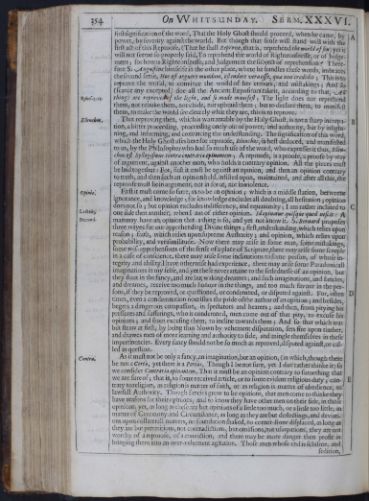 534
On Whitsunday.
Serm. XXXVI.
first signification of the word, That the Holy Ghost should proceed, when he came, by
534
On Whitsunday.
Serm. XXXVI.
first signification of the word, That the Holy Ghost should proceed, when he came, by
power, by severity against the world. But though that sense will stand well with the
first act of this Reproofe, (That he shall Reprove, that is, reprehend the world of sin) yet it
will not seeme so properly said, To reprehend the world of Righteousnesse, or of Judge-
ment; for how is Righteonsnesse, and Judgement the subject of reprehension? There-
fore S. Augustine himselfe in the other place, where he handles these words, imbraces
the second sense, Hoc est arguere mundum, ostendere vera esse, quæ non credidit; This is to
reprove the world, to convince the world of her errours, and mistakings; And so
(scarce any excepted) doe all the Ancient Expositors take it, according to that, All
things are reproved of the light,Ephes. 5.13. and so made manifest; The light does not reprehend
them, not rebuke them, not chide, not upbraid them; but to declare them, to manifest
them, to make the world see clearely what they are, this is to reprove.
That reproving then, Elenchus. which is warrantable by the Holy Ghost, is not a sharp increpa-
tion, a bitter proceeding, proceeding onely out of power, and authority, but by inlight-
ning, and informing, and convincing the understanding. The signification of this word,
which the Holy Ghost uses here for reproofe, Elenchos, is best deduced, and manifested
to us, by the Philosopher who had so much use of the word, who expresses it thus, Elen-
chus est Syllogismus contra contraria opinantem; A reproofe, is a proofe, a proofe by way
of argument, against another man, who holds a contrary opinion. All the pieces must
be laid together: For, first it must be against an opinion, and then an opinion contrary
to truth, and then such an opinion held, insisted upon, maintained, and after all this, the
reproofe must lie in argument, not in force, not in violence.
First it must come so farre, Opinio. as to be an opinion; which is a middle station, betweene
ignorance, and knowledge; for knowledge excludes all doubting, all hesitation; opinion
does not so; but opinion excludes indifferency, and equanimity; I am rather inclined to
one side then another, Lactant. when I am of either opinion. Id opinatur quisque quod nescit: A
Bernard. man may have an opinion that a thing is so, and yet not know it. S. Bernard proposes
three wayes for our apprehending Divine things; first, understanding, which relies upon
reason; faith, which relies upon supreme Authority; and opinion, which relies upon
probability, and verisimilitude. Now there may arise in some man, some mistakings,
some mis-apprehensions of the sense of a place of Scripture, there may arise some scruple
in a case of conscience, there may arise some inclinations to some person, of whose in-
tegrity and ability I have otherwise had experience, there may arise some Paradoxicall
imaginations in my selfe, and yet these never attaine to the setlednesse of an opinion, but
they float in the fancy, and are but waking dreames; and such imaginations, and fancies,
and dreames, receive too much honour in the things, and too much favour in the per-
sons, if they be reproved, or questioned, or condemned, or disputed against. For, often
times, even a condemnation nourishes the pride of the author of an opinion; and besides,
begets a dangerous compassion, in spectators and hearers; and then, from pitying his
pressures and sufferings, who is condemned, men come out of that pity, to excuse his
opinions; and from excusing them, to incline towards them; And so that which was
but straw at first, by being thus blown by vehement disputation, sets fire upon timber,
and drawes men of more learning and authority to side, and mingle themselves in these
impertinencies. Every fancy should not be so much as reproved, disputed against, or cal-
led in question.
As it must not be only a fancy, Contra. an imagination, but an opinion, (in which, though there
be not a Certò, yet there is a Potiùs, Though I be not sure, yet I doe rather thinke it) so
we consider Contraria opinantem, That it must be an opinion contrary to something that
we are sure of; that is, to some received article, or to some evident religious duty; con-
trary to religion, as religion is matter of faith, or as religion is matter of obedience, to
lawfull Authority. Though fancies grow to be opinions, that men come to thinke they
have reasons for their opinions, and to know they have other men on their side, in those
opinions; yet, as long as these are but opinions of a little too much, or a little too little, in
matter of Ceremony and Circumstance, as long as they are but deflectings, and deviati-
ons upon collaterall matters, no foundation shaked, no corner-stone displaced, as long as
they are but preteritions, not contradictions, but omissions, not usurpations, they are not
worthy of a reproofe, of a conviction, and there may be more danger then profit in
bringing them into an over-vehement agitation. Those men whose end is schisme, and sedition
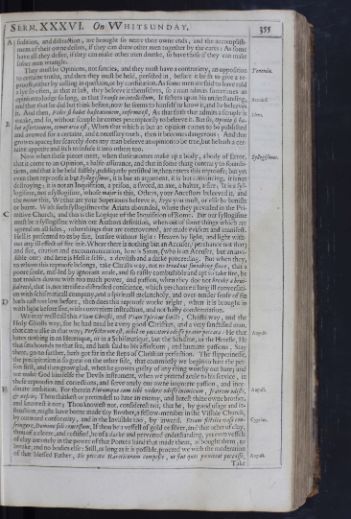 Serm. XXXVI.
On Whitsunday.
355
sedition, and distraction, are brought so neare their owne ends, and the accomplish-
Serm. XXXVI.
On Whitsunday.
355
sedition, and distraction, are brought so neare their owne ends, and the accomplish-ment of their owne desires, if they can draw other men together by the eares: As some
have all they desire, if they can make other men drunke, so have these if they can make
sober men wrangle.
They must be Opinions, not fancies, and they must have a contrariety, Tenenda. an opposition
to certaine truths, and then they must be held, persisted in, before it be fit to give a re-
proofe, either by calling in question, or by confutation. As some men are said to have told
a lye so often, as that at last, they beleeve it themselves, so a man admits sometimes an
opinion to lodge so long, as that Transit in intellectum, It fastens upon his understanding,
Bernard. and that that he did but think before, now he seems to himself to know it, and he beleeves
it. And then, Fides si habet hæsitationem, infirma est,Idem. As that faith that admits a scruple is
weake, and so, without scruple he comes peremptorily to beleeve it. But so, 1. Opinio si ha-
bet assertionem, temeraria est, When that which is but an opinion comes to be published
and avowed for a certaine, and a necessary truth, then it becomes dangerous; And that
growes apace; for scarcely does any man beleeve an opinion to be true, but he hath a cer-
taine appetite and itch to infuse it into others too.
Now when these pieces meet, when these atomes make up a body, a body of Error,
Syllogismus. that it come to an Opinion, a halfe-assurance, and that in some thing contrary to founda-
tions, and that it be held stiffely, publiquely persisted in, then enters this reproofe; but yet
even then reproofe is but Syllogismus, it is but an argument, it is but convincing, it is not
destroying; it is not an Inquisition, a prison, a sword, an axe, a halter, a fire; It is a syl-
logisme, not a syllogisme, whose major is this, Others, your Ancestors beleeved it, and
the minor this, We that are your Superiours beleeve it, Ergo you must, or else be banisht
or burnt. With such syllogismes the Arians abounded, where they prevailed in the Pri-
mitive Church, and this is the Logique of the Inquisition of Rome. But our syllogisme
must be a syllogisme within our Authors definition, when out of some things which are
agreed on all sides, other things that are controverted, are made evident and manifest.
Hell is presented to us by fire, but fire without light: Heaven by light, and light with-
out any ill effect of fire in it. Where there is nothing but an Accuser, (perchance not that)
and fire, citation and excommunication, here is Satan, (who is an Accuser, but an invi-
sible one) and here is Hell it selfe, a devilish and a darke proceeding. But when they,
to whom this reproofe belongs, take Christs way, not to tread out smoaking flaxe, that a
poore soule, mis-led by ignorant zeale, and so easily combustible and apt to take fire, be
not troden downe with too much power, and passion, when they doe not breake a brui-
sed reed, that is, not terrifie a distracted conscience, which perchance a long ill conversati-
on with schismaticall company, and a spirituall melancholy, and over-tender sense of sin
hath cast too low before, then does this reproofe worke aright, when it is brought in
with light before fire, with convenient instruction, and not hasty condemnation.
We may well call this Viam Christi, and Viam Spiritus sancti, Christs way, and the
Holy Ghosts way, for he had need be a very good Christian, and a very sanctified man,
that can walke in that way; Perfectorum est, nihil in peccatore odisse præter peccata:August. He that
hates nothing in an Heretique, or in a Schismatique, but the Schisme, or the Heresie, He
that sets bounds to that sea, and hath said to his affections, and humane passions, Stay
there, go no farther, hath got far in the steps of Christian perfection. The slipperinesse,
the precipitation is so great on the other side, that commonly we begin to hate the per-
son first, and then grow glad, when he growes guilty of any thing worthy our hate; and
we make God himselfe the Devils instrument, when we pretend zeale to his service, in
these reproofes and corrections, and serve onely our owne impotent passion, and inor-
dinate ambition. For therein Plerumque cum tibi videris odisse inimicum, fratrem odisti,
August. & nescis; Thou thinkest or pretendest to hate an enemy, and hatest thine owne brother,
and knowest it not; Thou knowest not, considerest not, that he, by good usage and in-
struction, might have beene made thy Brother, a fellow-member in the Visible Church,
by outward conformity, and in the Invisible too, by inward.Cyprian. Etiam fictilia vasa con-
fringere, Domino soli concessum, If thou be a vessell of gold or silver, and that other of clay,
thou of a cleere, and rectified, he of a darke and perverted understanding, yet even vessels
of clay are onely in the power of that Potters hand that made them, or bought them, to
breake, and no bodies else: Still, as long as it is possible, proceed we with the moderation
of that blessed Father, Sic peccata Hæreticorum compesce, ut sint quos pœniteat peccasse,August. Take
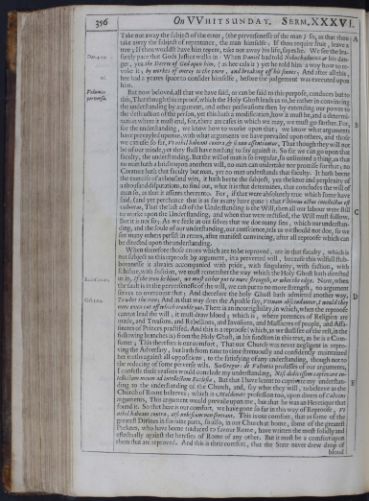 356
On Whitsundays.
Serm. XXXVI.
Take not away the subject of the error, (the perversenesse of the man) so, as that thou
356
On Whitsundays.
Serm. XXXVI.
Take not away the subject of the error, (the perversenesse of the man) so, as that thou
take away the subject of repentance, the man himselfe; If thou require fruit, leave a
tree; If thou wouldst have him repent, take not away his life, sayes he. We see the lea-
surely pace that Gods Justice walks in:Dan 4.24. When Daniel had told Nebuchadnezzar his dan-
ger, yea the Decree of God upon him, (as hee cals it) yet he told him a way how to re-
voke it; by workes of mercy to the poore, and breaking off his sinnes; And after all this,
hee had a yeares space to consider himselfe, 26. before the judgement was executed upon
him.
But now beloved, Voluntas all that we have said, or can be said to this purpose, conduces but to
perversa. this, That though this reproof, which the Holy Ghost leads us to, be rather in convincing
the understanding by argument, and other perswasions then by extending our power to
the destruction of the person, yet this hath a modification, how it must be, and a determi-
nation where it must end, for, there are cases in which we may, we must go farther. For,
for the understanding, we know how to worke upon that; we know what arguments
have prevayled upon us, with what arguments we have prevailed upon others, and those
we can use: so far, Vt nihil habeant contra, & si non assentiantur, That though they will not
be of our minde, yet they shall have nothing to say against it. So far we can go upon that
faculty, the understanding. But the will of man is so irregular, so unlimited a thing, as that
no man hath a bridle upon anothers will, no man can undertake nor promise for that; no
Creature hath that faculty but man, yet no man understands that faculty. It hath beene
the exercise of a thousand wits, it hath beene the subject, yea the knot and perplexity of
a thousand disputations, to find out, what it is that determines, that concludes the will of
man so, as that it assents thereunto. For, if that were absolutely true which some have
said, (and yet perchance that is as far as any have gone) that Vltimus actus intellectus est
voluntas, That the last act of the Understanding is the Will, then all our labour were still
to worke upon the Understanding, and when that were rectified, the Will must follow.
But it is not so; As we feele in our selves that we doe many sins, which our understan-
ding, and the soule of our understanding, our conscience, tels us we should not doe, so we
see many others persist in errors, after manifest convincing, after all reproofe which can
be directed upon the understanding.
When therefore those errors which are to be reproved, are in that faculty, which is
not subject to this reproofe by argument, in a perverted will, because this wilfull stub-
bornnesse is alwaies accompanied with pride, with singularity, with faction, with
schisme, with sedition, we must remember the way which the Holy Ghost hath directed
us in, Eccles. 10.16. If the iron be blunt, we must either put to more strength, or whet the edge. Now, when
the fault is in the perversenesse of the will, we can put to no more strength, no argument
serves to overcome that; And therefore the holy Ghost hath admitted another way,
To whet the iron;Gal. 5.12. And in that way does the Apostle say, Vtinam abscindantur, I would they
were even cut off which trouble you. There is an incorrigibility, in which, when the reproofe
cannot lead the will, it must draw blood; which is, where pretences of Religion are
made, and Treasons, and Rebellions, and Invasions, and Massacres of people, and Assa-
sinates of Princes practised. And this is a reproofe (which, as we shall see of the rest in the
following branches is) from the Holy Ghost, in his function in this text, as he is a Com-
forter; This therefore is our comfort, That our Church was never negligent in repro-
ving the Adversary, but hath from time to time strenuously and confidently maintained
her truths against all oppositions, to the satisfying of any understanding, though not to
the reducing of some perverse wils. So Gregor: de Valentia professes of our arguments,
I confesse these reasons would conclude my understanding, Nisi didicissem captivare in-
tellectum meum ad intellectum Ecclesiæ, But that I have learnt to captivate my understan-
ding to the understanding of the Church, and, say what they will, to beleeve as the
Church of Rome beleeves; which is Maldonats profession too, upon divers of Calvins
arguments, This argument would prevaile upon me, but that he was an Heretique that
found it. So that here is our comfort, we have gone so far in this way of Reproofe, Vt
nihil habeant contra, etsi nobiscum non sentiant. This is our comfort, that as some of the
greatest Divines in forraine parts, so also, in our Church at home, some of the greatest
Prelates, who have beene traduced to favour Rome, have written the most solidly and
effectually against the heresies of Rome of any other. But it must be a comfort upon
them that are reproved. And this is their comfort, that the State never drew drop of blood
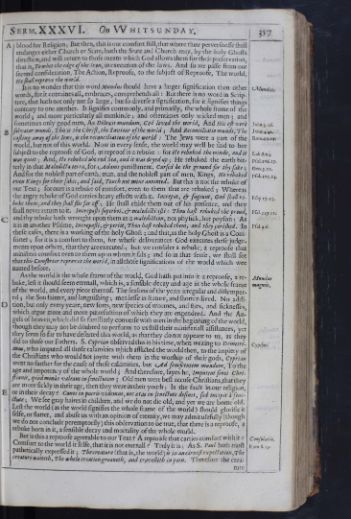 Serm. XXXVI.
On Whitsunday.
357
blood for Religion; But then, this is our comfort still, that where their perversnesse shall
Serm. XXXVI.
On Whitsunday.
357
blood for Religion; But then, this is our comfort still, that where their perversnesse shall
endanger either Church or State, both the State and Church may, by the holy Ghosts
direction, and will return to those means which God allows them for their preservation,
that is, To whet the edge of the Iron, in execution of the laws. And so we passe from our
second consideration, The Action, Reproofe, to the subject of Reproofe, The world,
He shall reprove the world.
It is no wonder that this word Mundus should have a larger signification then other
words, for it containes all, embraces, comprehends all: But there is no word in Scrip-
ture, Mundus. that hath not only not so large, but so diverse a signification, for it signifies things
contrary to one another. It signifies commonly, and primarily, the whole frame of the
world; and more particularly all mankinde; and oftentimes only wicked men; and
sometimes only good men, As Dilexit mundum,God loved the world,John 3.16. And Hic est verè
salvator mundi, John 4.42. This is the Christ, the Saviour of the world; And Reconciliatio mundi, The
Rom. 11.15. casting away of the Iews, is the reconciliation of the world: The Jews were a part of the
world, but not of this world. Now in every sense, the world may well be said to bee
subject to the reproofe of God, as reproof is a rebuke: for He rebuked the winde,Luk. 8.14. and it
was quiet; Psal. 106.17. And, He rebuked the red Sea, and it was dryed up; He rebuked the earth bit-
terly Gen. 3.17. in that Maledicta terra, for Adams punishment, Cursed be the ground for thy sake;
Psal. 105.14. And for the noblest part of earth, man, and the noblest part of men, Kings, He rebuked
even Kings for their sakes, and said, Touch not mine anointed. But this is not the rebuke of
our Text; for ours is a rebuke of comfort, even to them that are rebuked; Whereas
the angry rebuke of God carries heavy effects with it. Increpat, & fugiunt,Esay 17.13. God shall re-
buke them, and they shall flie far off; He shall chide them out of his presence, and they
shall never return to it. Increpasti superbos, & maledicti isti: Thou hast rebuked the proud,
Psal. 119.21. and thy rebuke hath wrought upon them as a Malediction, not physick, but poyson; As
it is in another Psalme, Increpasti, & periit, Thou hast rebuked them, and they perished.Psal. 9.6. In
these cases, there is a working of the holy Ghost; and that, as the holy Ghost is a Com-
forter; for it is a comfort to them, for whose deliverances God executes these judge-
ments upon others, that they are executed; but we consider a rebuke, a reproofe that
ministers comfort even to them upon whom it fals; and so in that sense, we shall see
that this Comforter reproves the world, in all those significations of the world which wee
named before.
As the world is the whole frame of the world, God hath put into it a reproofe, Mundus
magnus. a re-
buke, lest it should seem eternall, which is, a sensible decay and age in the whole frame
of the world, and every piece thereof. The seasons of the yeare irregular and distemper-
ed; the Sun fainter, and languishing; men lesse in stature, and shorter-lived. No addi-
tion, but only every yeare, new sorts, new species of wormes, and flies, and sicknesses,
which argue more and more putrefaction of which they are engendred. And the An-
gels of heaven, which did so familiarly converse with men in the beginning of the world,
though they may not be doubted to perform to us still their ministeriall assistances, yet
they seem so far to have deserted this world, as that they do not appeare to us, as they
did to those our Fathers. S. Cyprian observed this in his time, when writing to Demetri-
anus, Cyprian. who imputed all those calamities which afflicted the world then, to the impiety of
the Christians who would not joyne with them in the worship of their gods, Cyprian
went no farther for the cause of these calamities, but Ad senescentem mundum, To the
age and impotency of the whole world; And therefore, sayes he, Imputent senes Chri-
stianis, quòd minùs valeant in senectutem; Old men were best accuse Christians, that they
are more sickly in their age, then they were in their youth; Is the fault in our religion,
or in their decay? Canos in pueris videmus, nec ætas in senectute desinit, sed incipit à sene-
ctute; We see gray haires in children, and we do not die old, and yet we are borne old.
Lest the world (as the world signifies the whole frame of the world) should glorifie it
selfe, or flatter, and abuse us with an opinion of eternity, we may admit usefully (though
we do not conclude peremptorily) this observation to be true, that there is a reproofe, a
rebuke born in it, a sensible decay and mortality of the whole world.
But is this a reproofe agreeable to our Text? A reproofe that carries comfort with it?
Consolatio. Comfort to the world it selfe, that it is not eternall? Truly it is; As S. Paul hath most
pathetically expressed it; Rom. 8.19. The creature (that is, the world) is in anearnest expectation, The
creature waiteth, The whole creation groaneth, and travelleth in pain. Therefore the crea-
ture
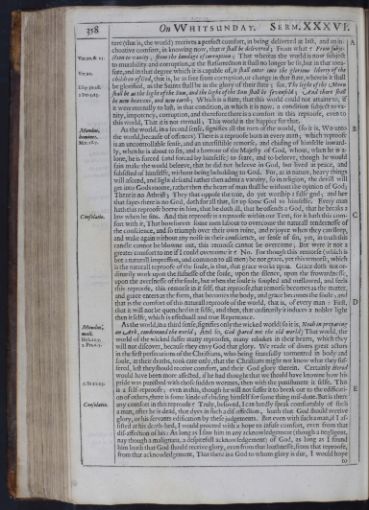 358
On Whitsundays.
Serm. XXXVI.
ture (that is, the world) receives a perfect comfort, in being delivered at last, and an in-
358
On Whitsundays.
Serm. XXXVI.
ture (that is, the world) receives a perfect comfort, in being delivered at last, and an in-choative comfort, in knowing now, that it shall be delivered; From what? From subje-
ction to vanity,Ver. 20. & 21. from the bondage of corruption; That whereas the world is now subject
to mutability and corruption, at the Resurrection it shall no longer be so, but in that mea-
sure, and in that degree which it is capable of, Ver. 21. It shall enter into the glorious liberty of the
children of God, that is, be as free from corruption, or change in that state, wherein it shall
be glorified, Esay 30.26. as the Saints shall be in the glory of their state; for, The light of the Moon
2 Pet. 3.13. shall be as the light of the Sun, and the light of the Sun shall be sevenfold; And there shall
be new heavens, and new earth; Which is a state, that this world could not attaine to, if
it were eternally to last, in that condition, in which it is now, a condition subject to va-
nity, impotency, corruption, and therefore there is a comfort in this reproofe, even to
this world, That it is not eternall; This world is the happier for that.
As the world, Mundus
homines. in a second sense, signifies all the men of the world, (so it is, Wo unto
the world, because of offences) There is a reproofe born in every man; which reproofe Mat. 18.7.
is an uncontrollable sense, and an unresistible remorse, and chiding of himselfe inward-
ly, when he is about to sin, and a horrour of the Majesty of God, whom, when he is a-
lone, he is forced (and forced by himselfe) to feare, and to beleeve, though he would
fain make the world beleeve, that he did not beleeve in God, but lived at peace, and
subsisted of himselfe, without being beholding to God. For, as in nature, heavy things
will ascend, and light descend rather then admit a vacuity, so in religion, the devill will
get into Gods roome, rather then the heart of man shall be without the opinion of God;
There is no Atheist; They that oppose the true, do yet worship a false god; and hee
that sayes there is no God, doth for all that, set up some God to himselfe. Every man
hath this reproofe borne in him, that he doth ill, that he offends a God, that he breaks a
law when he sins.Consolatio. And this reproofe is a reproofe within our Text, for it hath this com-
fort with it, That howsoever some men labour to overcome the naturall tendernesse of
the conscience, and so triumph over their own ruine, and rejoyce when they can sleep,
and wake again without any noise in their conscience, or sense of sin, yet, in truth this
candle cannot be blowne out, this remorse cannot be overcome; But were it not a
greater comfort to me if I could overcome it? No. For though this remorse (which is
but a naturall impression, and common to all men) be not grace, yet this remorse, which
is the naturall reproofe of the soule, is that, that grace works upon. Grace doth not or-
dinarily work upon the stifnesse of the soule, upon the silence, upon the frowardnesse,
upon the aversnesse of the soule, but when the soule is soupled and mellowed, and feels
this reproofe, this remorse in it self, that reproofe, that remorse becomes as the matter,
and grace enters as the form, that becomes the body, and grace becomes the soule; and
that is the comfort of this naturall reproofe of the world, that is, of every man: First,
that it will not be quenched in it selfe, and then, that ordinarily it induces a nobler light
then it selfe, which is effectuall and true Repentance.
As the world, in a third sense, Mundus;
mali. signifies only the wicked world (so it is, Noah in preparing
an Ark, condemned the world; And so, God spared not the old world) That world, the
Heb. 11.7. world of the wicked suffer many reproofes, many rebukes in their hearts, which they
2 Pet. 2.5. will not discover, because they envy God that glory. We reade of divers great actors
in the first persecutions of the Christians, who being fearefully tormented in body and
soule, at their deaths, took care only, that the Christians might not know what they suf-
fered, lest they should receive comfort, and their God glory therein. Certainly Herod
would have been more affected, if he had thought that we should have knowne how his
pride was punished with those sudden wormes, Acts 12.23. then with the punishment it selfe. This
is a self-reproofe; even in this, though he will not suffer it to break out to the edificati-
on of others, there is some kinde of chiding himself for some thing mis-done. But is there
any comfort in this reproofe?Consolatio. Truly, beloved, I can hardly speak comfortably of such
a man, after he is dead, that dyes in such a dis-affection, loath that God should receive
glory, or his servants edification by these judgements. But even with such a man, if I as-
sisted at his death-bed, I would proceed with a hope to infuse comfort, even from that
dis-affection of his: As long as I saw him in any acknowledgement (though a negligent,
nay though a malignant, a despitefull acknowledgement) of God, as long as I found
him loath that God should receive glory, even from that loathnesse, from that reproofe,
from that acknowledgement, That there is a God to whom glory is due, I would hope to
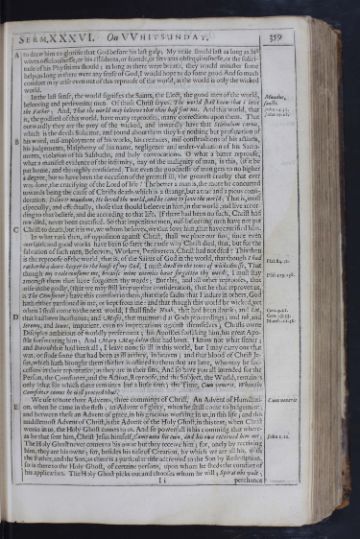 Serm. XXXVI.
On VVWhitsunday.
359
to draw him to glorifie that God before his last gasp; My zeale should last as long as his
Serm. XXXVI.
On VVWhitsunday.
359
to draw him to glorifie that God before his last gasp; My zeale should last as long as his
wives officiousnesse, or his childrens, or friends, or servants obsequiousnesse, or the solici-
tude of his Physitians should; as long as there were breath, they would minister some
help; as long as there were any sense of God, I would hope to do some good. And so much
comfort may arise even out of this reproofe of the world, as the world is only the wicked
world.
In the last sense, the world signifies the Saints, the Elect, the good men of the world,
Mundus,
sancti.
John 14.31.
John 17.21. beleeving and persevering men. Of those Christ sayes, The world shall know that I love
the Father; And, That the world may beleeve that thou hast sent me. And this world, that
is, the godliest of this world, have many reproofes, many corrections upon them. That
outwardly they are the prey of the wicked, and inwardly have that Stimulum carnis,
which is the devils Solicitor, and round about them they see nothing but profanation of
his word, mis-imployment of his works, his creatures, mis-constructions of his actions,
his judgements, blasphemy of his name, negligence and under-valuation of his Sacra-
ments, violation of his Sabbaths, and holy convocations. O what a bitter reproofe,
what a manifest evidence of the infirmity, nay of the malignity of man, is this, (if it be
put home, and throughly considered) That even the goodnesse of man gets to no higher
a degree, but to have been the occasion of the greatest ill, the greatest cruelty that ever
was done, the crucifying of the Lord of life! The better a man is, the more he concurred
towards being the cause of Christs death; which is a strange, but a true and a pious consi-
deration. Dilexit mundum, He loved the world, and he came to save the world; That is, most
especially, and effectually, those that should beleeve in him, in the world, and live accor-
ding to that beliefe, and die according to that life. If there had been no such, Christ had
not died, never been crucified. So that impenitent men, mis-beleeving men have not put
Christ to death, but it is we, we whom he loves, we that love him, that have crucified him.
In what rank then, of opposition against Christ, shall we place our sins, since even
our faith and good works have been so farre the cause why Christ died, that, but for the
salvation of such men, Beleevers, Workers, Perseverers, Christ had not died? This then
Psal. 84.10. is the reproofe of the world, that is, of the Saints of God in the world, that though I had
rather be a doore-keeper in the house of my God, I must dwell in the tents of wickednesse, That
though my zeale consume me, because mine enemies have forgotten thy words,Psal. 119.138. I must stay
amongst them that have forgotten thy words; But this, and all other reproofes, that
arise in the godly, (that we may still keep up that consideration, that he that reproves us,
is The Comforter) have this comfort in them, that these faults that I indure in others, God
hath either pardoned in me, or kept from me: and that though this world be wicked, yet
when I shall come to the next world, I shall finde Noah, that had been drunk; and Lot,
Gen. 9.21.
Gen. 19.33.
Numb. 11.11. that had been incestuous; and Moses, that murmured at Gods proceedings; and Iob, and
Ieremy, and Ionas, impatient, even to imprecations against themselves; Christs owne
Disciples ambitious of worldly preferment; his Apostles forsaking him, his great Apo-
stle forswearing him; And Mary Magdalen that had been, I know not what sinner;
and David that had been all; I leave none so ill in this world, but I may carry one that
was, or finde some that had been as ill as they, in heaven; and that blood of Christ Je-
sus, which hath brought them thither, is offered to them that are here, who may be suc-
cessors in their repentance, as they are in their sins. And so have you all intended for the
Person, the Comforter, and the Action, Reproofe, and the Subject, the World; remaines
only (that for which there remaines but a little time) the Time, Cum venerit, When the
Comforter comes he will proceed thus.
We use to note three Advents, three commings of Christ.Cum venerit An Advent of Humiliati-
on, when he came in the flesh; an Advent of glory, when he shall come to judgement;
and between these an Advent of grace, in his gracious working in us, in this life; and this
middlemost Advent of Christ, is the Advent of the Holy Ghost, in this text; when Christ
works in us, the Holy Ghost comes to us. And so powerfull is his comming, that where-
as he that sent him, Christ Jesus himself, Came unto his own, and his own received him not;
John 1.11. The Holy Ghost never comes to his owne but they receive him; for, onely by receiving
him, they are his owne; for, besides his title of Creation, by which we are all his, with
the Father, and the Son, as there is a particular title accrewed to the Son by Redemption,
so is there to the Holy Ghost, of certaine persons, upon whom he sheds the comfort of
his application. The Holy Ghost picks out and chooses whom he will; Spirat ubi vult; Ii perchance
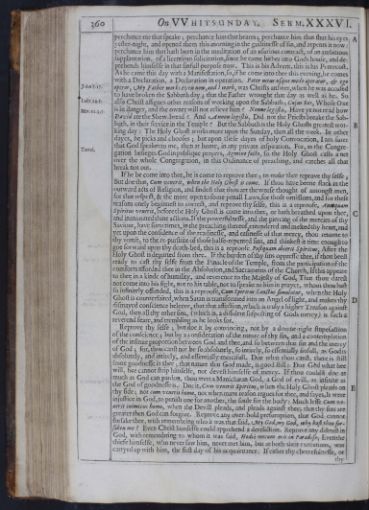 360
On Whitsunday.
Serm. XXXVI.
perchance me that speake; perchance him that heares; perchance him that shut his eyes
360
On Whitsunday.
Serm. XXXVI.
perchance me that speake; perchance him that heares; perchance him that shut his eyes
yester-night, and opened them this morning in the guiltinesse of sin, and repents it now:
perchance him that hath been in the meditation of an usurious contract, of an ambitious
supplantation, of a licentious solicitation, since he came hither into Gods house, and de-
prehends himselfe in that sinfull purpose now. This is his Advent, this is his Pentecost.
As he came this day with a Manifestation, so, if he come into thee this evening, he comes
with a Declaration, a Declaration in operation. Pater meus usque modo operatur, & ego
John 5.17. operor, My Father works even now, and I work, was Christs answer, when he was accused
to have broken the Sabbath day; that the Father wrought that day as well as he. So
Luke 14.5. also Christ assignes other reasons of working upon the Sabbath; Cujus Bos, Whose Oxe
Mat. 12.3, 5. is in danger, and the owner will not relieve him? Nonne legistis, Have ye not read how
David ate the Shew-bread? And Annon legistis, Did not the Priests breake the Sab-
bath, in their service in the Temple? But the Sabbath is the Holy Ghosts greatest wor-
king day: The Holy Ghost works more upon the Sunday, then all the week. In other
dayes, he picks and chooses; but upon these dayes of holy Convocation, I am surer
Tertul. that God speakes to me, then at home, in any private inspiration. For, as the Congre-
gation besieges God in publique prayers, Agmine facto, so the Holy Ghost casts a net
over the whole Congregation, in this Ordinance of preaching, and catches all that
break not out.
If he be come into thee, he is come to reprove thee; to make thee reprove thy selfe;
But doe that, Cum vencrit, when the Holy Ghost is come. If thou have beene slack in the
outward acts of Religion, and findest that thou art the worse thought of amongst men,
for that respect, & the more open to some penall Laws, for those omissions, and for these
reasons onely beginnest to correct, and reprove thy selfe, this is a reproofe, Antequam
Spiritus venerit, before the Holy Ghost is come into thee, or hath breathed upon thee,
and inanimated thine actions. If the powerfulnesse, and the piercing of the mercies of thy
Saviour, have sometimes, in the preaching thereof, entendered and melted thy heart, and
yet upon the confidence of the readinesse, and easinesse of that mercy, thou returne to
thy vomit, to the re-pursuite of those halfe-repented sins, and thinkest it time enough to
goe forward upon thy death-bed, this is a reproofe Postquam abierit Spiritus, After the
Holy Ghost is departed from thee. If the burden of thy sins oppresse thee, if thou beest
ready to cast thy selfe from the Pinacle of the Temple, from the participation of the
comforts afforded thee in the Absolution, and Sacraments of the Church, If this appeare
to thee in a kinde of humility, and reverence to the Majesty of God, That thou darest
not come into his sight, not to his table, not to speake to him in prayer, whom thou hast
so infinitely offended, this is a reproofe, Cum Spiritus Sanctus simulatur, when the Holy
Ghost is counterfaited, when Satan is transformed into an Angel of light, and makes thy
dismayed conscience beleeve, that that affection, which is truly a higher Treason against
God, then all thy other sins, (which is, a diffident suspecting of Gods mercy) is such a
reverend feare, and trembling as he looks for.
Reprove thy selfe; but doe it by convincing, not by a downe-right stupefaction
of the conscience; but by a consideration of the nature of thy sin, and a contemplation
of the infinite proportion between God and thee, and so between that sin and the mercy
of God; for, thou canst not be so absolutely, so intirely, so essentially sinfull, as God is
absolutely, and intirely, and essentially mercifull. Doe what thou canst, there is still
some goodnesse in thee; that nature that God made, is good still: Doe God what hee
will, hee cannot strip himselfe, not devest himselfe of mercy. If thou couldst doe as
much as God can pardon, thou wert a Manichaean God, a God of evill, as infinite as
the God of goodnesse is. Doe it, Cum venerit Spiritus, when the Holy Ghost pleads on
thy side; not cum venerit homo, not when mans reason argues for thee, and sayes, It were
injustice in God, to punish one for another, the soule for the body: Much lesse Cum ve-
nerit inimicus homo, when the Devill pleads, and pleads against thee, that thy sins are
greater then God can forgive. Reprove any over-bold presumption, that God cannot
forsake thee, with remembring who it was that said, My God, my God, why hast thou for-
saken me? Even Christ himselfe could apprehend a dereliction. Reprove any distrust in
God, with remembring to whom it was said, Hodiè mecum eris in Paradiso; Even the
thiefe himselfe, who never saw him, never met him, but at both their executions, was
carryed up with him, the first day of his acquaintance. If either thy cheerefulnesse, or thy
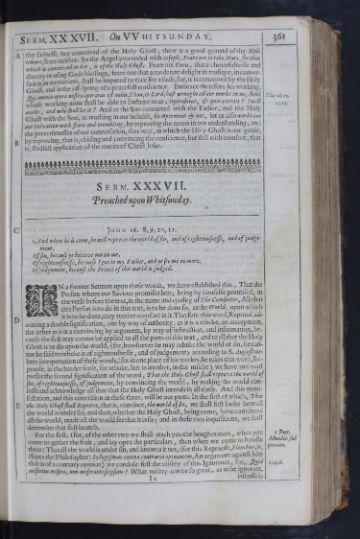 Serm. XXXVII.
On VVWhitsunday.
361
thy sadnesse bee conceived of the Holy Ghost, there is a good ground of thy Noli
Serm. XXXVII.
On VVWhitsunday.
361
thy sadnesse bee conceived of the Holy Ghost, there is a good ground of thy Noli
timere, feare neither. So the Angel proceeded with Ioseph, Feare not to take Mary, for that
which is conceived in her, is of the Holy Ghost. Feare not thou, that a chearefulnesse and
alacrity in using Gods blessings, feare not that a moderate delight in musique, in conver-
sation, in recreations, shall be imputed to thee for a fault, for, it is conceived by the Holy
Ghost, and is the off-spring of a peacefull conscience. Embrace therefore his working,
Esay 26.12.
43.13. Qui omnia opera nostra operatus est nobis, Thou, O Lord, hast wrought all our works in us; And
whose working none shall be able to frustrate in us; Operabitur, & quis avertit? I will
worke, and who shall let it? And as the Son concurred with the Father, and the Holy
Ghost with the Son, in working in our behalfe, so Operemur & nos, let us also worke out
our Salvation with feare and trembling, by reproving the errors in our understanding, and
the perversenesses of our conversation, that way, in which the Holy Ghost is our guide,
by reproving, that is, chiding and convincing the conscience, but still with comfort, that
is, stedfast application of the merits of Christ Jesus. Serm. XXXVII.
Preached upon Whitsunday.
John 16. 8, 9, 10, 11.
And when he is come, he will reprove the world of sin, and of righteousnesse, and of judge-
ment.
Of sin, because ye beleeve not on me.
Of righteousnesse, because I goe to my Father, and ye see me no more.
Of judgement, because the Prince of this world is judged.
IN a former Sermon upon these words, we have established this, That the
Person whom our Saviour promises here, being by himselfe promised, in
the verse before the text, in the name and quality of The Comforter, All that
this Person is to do in this text, is to be done so, as the World, upon which
it is to be done, may receive comfort in it. Therfore this word, Reproof ad-
mitting a double signification, one by way of authority, as it is a rebuke, an increpation,
the other as it is a convincing by argument, by way of instruction, and information, be-
cause the first way cannot be applied to all the parts of this text, and to all that the Holy
Ghost is to do upon the world, (for, howsoever he may rebuke the world of sin, he can-
not be said to rebuke it of righteousnesse, and of judgement) according to S. Augustines
later interpretation of these words, (for in one place of his workes, he takes this word, Re-
proofe, in the harder sense, for rebuke, but in another, in the milder) we have and must
pursue the second signification of the word, That the Holy Ghost shall reprove the world of
sin, of righteousnesse, of judgement, by convincing the world, by making the world con-
fesse and acknowledge all that that the Holy Ghost intends in all these. And this mani-
festation, and this conviction in these three, will be our parts. In the first of which, That
the Holy Ghost shall Reprove, that is, convince, the world of sin, we shall first looke how all
the world is under sin; and then, whether the Holy Ghost, being come, have convinced
all the world, made all the world see that it is so; and in these two inquisitions, we shall
determine that first branch.
1 Part.
Mundus sub
peccato. For the first, (for, of the other two we shall reach you the boughes anon, when you
come to gather the fruit, and lay open the particulars, then when we come to handle
them) That all the world is under sin, and knowes it not, (for this Reproofe, Elenchus, is,
(sayes the Philosopher) Syllogismus contra contraria opinantem, An argument against him
August. that is of a contrary opinion) we condole first the misery of this Ignorance, for, Quid
miserius misero, non miser ante seipsum? What misery can be so great, as to be ignorant, Ii2 insensible
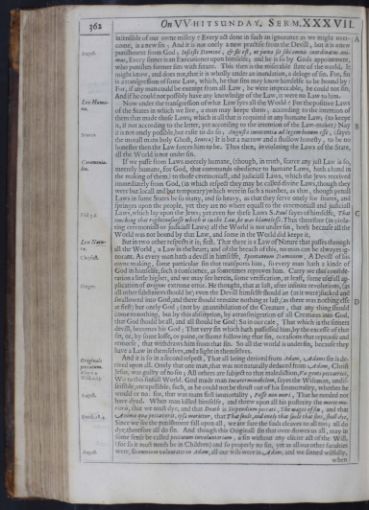 362
On Whitsunday.
Serm. XXXVII.
362
On Whitsunday.
Serm. XXXVII.
insensible of our owne misery? Every act done in such an ignorance as we might over-
come, is a new sin; And it is not onely a new practise from the Devill, but it is a new
punishment from God;August. Iussisti Domine, & sic est, ut pœna sit sibi omnis inordinatus ani-
mus, Every sinner is an Executioner upon himselfe; and he is so by Gods appointment,
who punishes former sins with future. This then is the miserable state of the world, It
might know, and does not, that it is wholly under an inundation, a deluge of sin. For, sin
is a transgression of some Law, which, he that sins may know himselfe to be bound by:
For, if any man could be exempt from all Law, he were impeccable, he could not sin;
And if he could not possibly have any knowledge of the Law, it were no Law to him.
Now under the transgression of what Law lyes all the World? Lex Huma-
na. For the positive Laws
of the States in which we live, a man may keepe them, according to the intention of
them that made those Laws; which is all that is required in any humane Law; (to keepe
it, if not according to the letter, yet according to the intention of the Law-maker) Nay
it is not onely possible, Seneca. but easie to do so; Angusta innocentia ad legem bonum esse, (sayes
the morall mans holy Ghost, Seneca) It is but a narrow and a shallow honesty, to be no
honester then the Law forces him to be. Thus then, in violating the Laws of the State,
all the World is not under sin.
If we passe from Laws meerely humane, Ceremonia-
lia. (though, in truth, scarce any just Law is so,
meerely humane, for God, that commands obedience to humane Laws, hath a hand in
the making of them) to those ceremoniall, and judiciall Laws, which the Jews received
immediately from God, (in which respect they may be called divine Laws, though they
were but locall and but temporary) which were in such a number, as that, though penall
Laws in some States be so many, and so heavy, as that they serve onely for snares, and
springes upon the people, yet they are no where equall to the ceremoniall and judiciall
Laws, Phil. 3.6. which lay upon the Jews; yet even for these Laws S. Paul sayes of himselfe, That
touching that righteousnesse which is in the Law, he was blamelesse. Thus therefore (in viola-
ting ceremoniall or judiciall Laws) all the World is not under sin, both because all the
World was not bound by that Law, and some in the World did keepe it.
But in two other respects it is;Lex Natu-
ræ. first, That there is a Law of Nature that passes through
all the World, a Law in the heart; and of the breach of this, no man can be alwayes ig-
norant. As every man hath a devill in himselfe, Chrysost. Spontaneum Dæmonem, A Devill of his
owne making, some particular sin that transports him, so every man hath a kinde of
God in himselfe, such a conscience, as sometimes reproves him. Carry we this conside-
ration a little higher, and we may see herein, some verification, at least, some usefull ap-
plication of Origens extreme error.Origen. He thought, that at last, after infinite revolutions, (as
all other substances should be) even the Devill himselfe should be (as it were) sucked and
swallowed into God, and there should remaine nothing at last, (as there was nothing else
at first) but onely God; (not by an annihilation of the Creature, that any thing should
come to nothing, but by this absorption, by a transmigration of all Creatures into God,
that God should be all, and all should be God) So in our case, That which is the sinners
devill, becomes his God; That very sin which hath possessed him, by the excesse of that
sin, or, by some losse, or paine, or shame following that sin, occasions that reproofe and
remorse, that withdraws him from that sin. So all the world is under sin, because they
have a Law in themselves, and a light in themselves.
And it is so in a second respect, Originale
peccatum. That all being derived from Adam, Adams sin is de-
rived upon all. Onely that one man, that was not naturally deduced from Adam, Christ
Jesus, was guilty of no sin; Esay 1.4. All others are subject to that malediction, Væ genti peccatrici,
Wo to this sinfull World. Wisd. 2.23. God made man Inexterminabilem, sayes the Wiseman, undis-
seisible, unexpellible; such, as he could not be thrust out of his Immortality, whether he
would or no:August. for, that was mans first immortality, Posse non mori, That he needed not
have dyed. When man killed himselfe, and threw upon all his posterity the morte mo-
rieris, that we must dye, and that Death is Stipendium peccati, The wages of sin, and that
Anima quæ peccaverit, ipsa morietur, Ezech. 18.4. that That soule, and onely that soule that sins, shall dye,
Since we see the punishment fall upon all, we are sure the fault cleaves to all too; all do
dye, therefore all do sin. And though this Originall sin that over-flowes us all, may in
some sense be called peccatum involuntarium, a sin without any elicite act of the Will,
(for so it must needs be in Children) and so properly no sin, yet as all our other faculties
were, August. so omnium voluntates in Adam, all our wils were in Adam, and we sinned wilfully, when
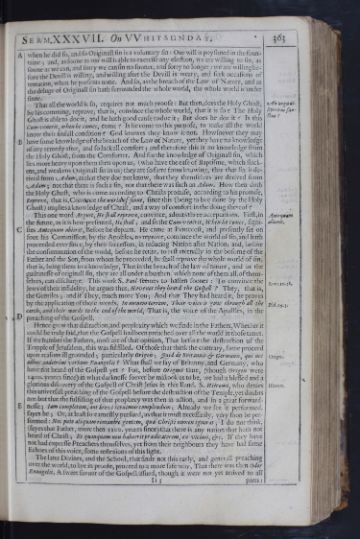 Serm. XXXVII.
On VVWhitsunday.
363
when he did so, and so Originall sin is a voluntary sin: Our will is poysoned in the foun-
Serm. XXXVII.
On VVWhitsunday.
363
when he did so, and so Originall sin is a voluntary sin: Our will is poysoned in the foun-taine; and, as soone as our will is able to exercise any election, we are willing to sin, as
soone as we can, and sorry we can sin no sooner, and sorry no longer: we are willing be-
fore the Devill is willing, and willing after the Devill is weary, and seek occasions of
tentation, when he presents none. And so, as the breach of the Law of Nature, and as
the deluge of Originall sin hath surrounded the whole world, the whole world is under
sinne.
That all the world is so, requires not much proofe: But then, does the Holy Ghost, An arguat
Spiritus san-
ctus?
by his comming, reprove, that is, convince the whole world, that it is so? The Holy
Ghost is able to doe it, and he hath good cause to doe it; But does he doe it? Is this
Cum venerit, when he comes, come? Is he come to this purpose, to make all the world
know their sinfull condition? God knowes they know it not. Howsoever they may
have some knowledge of the breach of the Law of Nature, yet they have no knowledge
of any remedy after, and so lack all comfort; and therefore this is no knowledge from
the Holy Ghost, from the Comforter. And for the knowledge of Originall sin, which
lies more heavy upon them then upon us, (who have the ease of Baptisme, which slack-
ens, and weakens Originall sin in us) they are so farre from knowing, that that sin is de-
rived from Adam, as that they doe not know, that they themselves are derived from
Adam; not that there is such a sin, not that there was such an Adam. How then doth
the Holy Ghost, who is come according to Christs promise, according to his promise,
Reprove, that is, Convince the world of sinne, since this (being to bee done by the Holy
Ghost) implies a knowledge of Christ, and a way of comfort in the doing thereof?
This one word Arguet, He shall reprove, convince, admits three acceptations. First, in Antequam
abierit.
the future, as it is here presented, He shall; and so the Cum venerit, When he comes, signi-
fies Antequam abierit, Before he departs. He came at Pentecost, and presently set on
foot his Commission, by the Apostles, to reprove, convince the world of sin, and hath
proceeded ever since, by their successors, in reducing Nation after Nation; and, before
the consummation of the world, before he retire, to rest eternally in the bosome of the
Father and the Son, from whom he proceeded, he shall reprove the whole world of sin,
that is, bring them to a knowledge, That in the breach of the law of nature, and in the
guiltinesse of originall sin, they are all under a burthen, which none of them all, of them-
selves, can discharge. This work S. Paul seemes to hasten sooner: To convince the Rom. 10.18.
Jews of their infidelity, he argues thus, Have not they heard the Gospell? They, that is,
the Gentiles; and if They, much more You; And that They had heard it, he proves
by the application of those words, In omnem terram,Psal. 19.3. Their voice is gone through all the
earth, and their words to the end of the world, That is, the voice of the Apostles, in the
preaching of the Gospell.
Hence grew that distraction, and perplexity which we finde in the Fathers, Whether it
could be truly said, that the Gospell had been preached over all the world in those times.
If we number the Fathers, most are of that opinion, That before the destruction of the
Temple of Jerusalem, this was fulfilled. Of those that think the contrary, some proceed
upon reasons ill grounded; particularly Origen; Quid de Britannis & Germanis,Origen. qui nec
adhuc audierunt verbum Euangelii? What shall we say of Britanny, and Germany, who
have not heard of the Gospell yet? For, before Origens time, (though Origen were
1400. yeares since) in what darknesse soever he mistook us to be, we had a blessed and a
glorious discovery of the Gospell of Christ Jesus in this Iland. S. Hierome,Hierom. who denies
this universall preaching of the Gospell before the destruction of the Temple, yet doubts
not but that the fulfilling of that prophecy was then in action, and in a great forward-
nesse; Iam completum, aut brevi ternimus complendum; Already we see it performed,
sayes he; Or, at least so earnestly pursued, as that it must necessarily, very soon be per-
formed: Nec puto aliquam remanere gentem, quæ Christi nomen ignor atignorat; I do not think,
(sayes that Father, more then 1200. yeares since) that there is any nation that hath not
heard of Christ; Et quanquam non habuerit prædicatorem, ex vicinis, &c. If they have
not had expresse Preachers themselves, yet from their neighbours they have had some
Echoes of this voice, some reflexions of this light.
The later Divines, and the School, that finde not this early, and generall preaching
over the world, to lye in proofe, proceed to a more safe way, That there was then Odor
Euangelii, A sweet savour of the Gospell issued, though it were not yet arrived to all Ii3 parts:
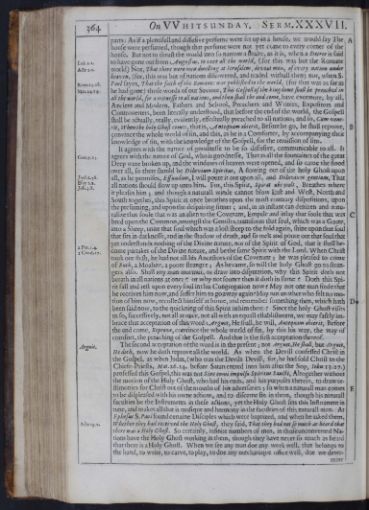 Serm. XXXVII.
On VVWhitsunday.
364
parts: As if a plentifull and diffusive perfume were set up in a house, we would say The
Serm. XXXVII.
On VVWhitsunday.
364
parts: As if a plentifull and diffusive perfume were set up in a house, we would say The
house were perfumed, though that perfume were not yet come to every corner of the
house. But not to thrust the world into so narrow a straite, as it is, when a Decree is said
to have gone out from Augustus,Luk. 2.1. to taxe all the world, (for this was but the Romane
world) Nor, Acts 2.5. That there were men dwelling at Ierusalem, devout men, of every nation under
heaven, (for, this was but of nations discovered, and traded withall then) nor, when S.
Paul sayes, Rom. 11.18.
Mat. 24.14. That the faith of the Romanes was published to the world, (for that was as far as
he had gone) those words of our Saviour, This Gospell of the kingdome shall be preached in
all the world, for a witnesse to all nations, and then shall the end come, have evermore, by all,
Ancient and Modern, Fathers and School, Preachers and Writers, Expositors and
Controverters, been literally understood, that before the end of the world, the Gospell
shall be actually, really, evidently, effectually preached to all nations; and so, Cum vene-
rit, When the holy Ghost comes, that is, Antequam abierit, Before he go, he shall reprove,
convince the whole world of sin, and this, as he is a Comforter, by accompanying their
knowledge of sin, with the knowledge of the Gospell, for the remission of sins.
It agrees with the nature of goodnesse to be so diffusive, communicable to all. It
agrees with the nature of God, Gen. 7.11. who is goodnesse, That as all the fountaines of the great
Deep were broken up, and the windows of heaven were opened, and so came the flood
over all, so there should be Diluvium Spiritus, A flowing out of the holy Ghost upon
all, Joel. 2.28.
Esay 2.2.
Joh. 3.8. as he promises, Effundam, I will poure it out upon all, and Diluvium gentium, That
all nations should flow up unto him. For, this Spirit, Spirat ubi vult, Breathes where
it pleases him; and though a naturall winde cannot blow East and West, North and
South together, this Spirit at once breathes upon the most contrary dispositions, upon
the presuming, and upon the despairing sinner; and, in an instant can denizen and natu-
ralize that soule that was an alien to the Covenant, Empale and inlay that soule that was
bred upon the Common, amongst the Gentiles, transform that soul, which was a Goate,
into a Sheep, unite that soul which was a lost sheep to the fold again, shine upon that soul
that sits in darknesse, and in the shadow of death, and so melt and poure out that soul that
yet understands nothing of the Divine nature, nor of the Spirit of God, that it shall be-
come partaker of the Divine nature, 2 Pet. 1.4.
1 Cor. 6.17. and be the same Spirit with the Lord. When Christ
took our flesh, he had not all his Ancestors of the Covenant; he was pleased to come
of Ruth, a Moabite, a poore stranger; As he came, so will the holy Ghost go to stran-
gers also. Shall any man murmur, or draw into disputation, why this Spirit doth not
breath in all nations at once? or why not sooner then it doth in some? Doth this Spi-
rit fall and rest upon every soul in this Congregation now? May not one man finde that
he receives him now, and suffer him to go away again? May not another who felt no mo-
tion of him now, recollect himself at home, and remember something then, which hath
been said now, to the quickning of this Spirit in him there? Since the holy Ghost visits
us so, successively, not all at once, not all with an equall establishment, we may safely im-
brace that acceptation of this word Arguet, He shall, he will, Antequam abierit, Before
the end come, Reprove, convince the whole world of sin, by this his way, the way of
comfort, the preaching of the Gospell. And that is the first acceptation thereof.
The second acceptation of the word is in the present;Arguit. not Arguet, He shall, but Arguit,
He doth, now he doth reprove all the world. As when the Devill confessed Christ in
the Gospel, as when Judas, (who was the Devils Devill, for, he had sold Christ to the
Chiefe-Priests, Mat. 26.14. before Satan entred into him after the Sop, Iohn 13.27.)
professed this Gospel, this was not Sine omni impulsu Spiritus Sancti, Altogether without
the motion of the Holy Ghost, who had his ends, and his purposes therein, to draw te-
stimonies for Christ out of the mouths of his adversaries; so when a naturall man comes
to be displeased with his owne actions, and to discerne sin in them, though his naturall
faculties be the Instruments in these actions, yet the Holy Ghost sets this Instrument in
tune, and makes all that is musique and harmony in the faculties of this naturall man. At
Ephesus S. Paul found certaine Disciples which were baptized, and when he asked them,
Whether they had received the Holy Ghost, Acts 19.2. they said, That they had not so much as heard that
there was a Holy Ghost. So certainly, infinite numbers of men, in those unconverted Na-
tions have the Holy Ghost working in them, though they have never so much as heard
that there is a Holy Ghost. When we see any man doe any work well, that belongs to
the hand, to write, to carve, to play, to doe any mechanique office well, doe we deter-
mine
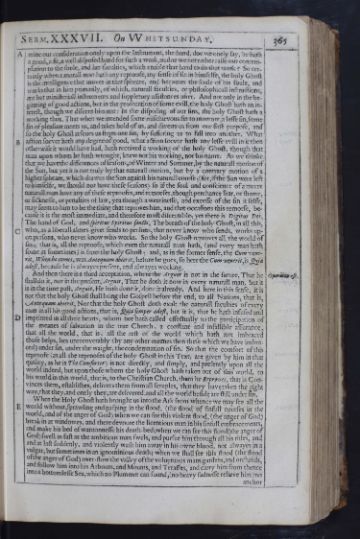 Serm. XXXVII.
On VVWhitsunday.
365
mine our consideration onely upon the Instrument, the hand, doe we onely say, he hath
Serm. XXXVII.
On VVWhitsunday.
365
mine our consideration onely upon the Instrument, the hand, doe we onely say, he hath
a good, a fit, a well disposed hand for such a work, or doe we not rather raise our contem-
plation to the soule, and her faculties, which enable that hand to do that work? So cer-
tainly when a morall man hath any reproofe, any sense of sin in himselfe, the holy Ghost
is the intelligence that moves in that spheare, and becomes the soule of his soule, and
works that in him primarily, of which, naturall faculties, or philosophicall instructions,
are but ministeriall instruments and suppletory assistances after. And not only in the be-
ginning of good actions, but in the prosecution of some evill, the holy Ghost hath an in-
terest, though we discern him not: In the disposing of our sins, the holy Ghost hath a
working thus, That when we intended some mischievous sin to morrow, a lesse sin, some
sin of pleasure meets us, and takes hold of us, and diverts us from our first purpose, and
so the holy Ghost rescues us from one sin, by suffering us to fall into another. What
action soever hath any degree of good, what action soever hath any lesse evill in it then
otherwise it would have had, hath received a working of the holy Ghost, though that
man upon whom he hath wrought, knew not his working, nor his name. As we thinke
that we have the differences of seasons, of Winter and Summer, by the naturall motion of
the Sun, but yet it is not truly by that naturall motion, but by a contrary motion of a
higher spheare, which drawes the Sun against his naturall course; (for, if the Sun were left
to himselfe, we should not have these seasons) so if the soul and conscience of a meere
naturall man have any of these reproofes, and remorses, though perchance fear, or shame,
or sicknesse, or penalties of law, yea though a wearinesse, and excesse of the sin it selfe,
may seem to him to be the thing that reproves him, and that occasions this remorse, be-
cause it is the most immediate, and therefore most discernible; yet there is Digitus Dei,
The hand of God, and spiritus Spiritus sancti, The breath of the holy Ghost, in all this,
who, as a liberall almes-giver sends to persons, that never know who sends, works up-
on persons, who never know who works. So the holy Ghost reproves all the world of
sin; that is, all the reproofe, which even the naturall man hath, (and every man hath
some at sometimes) is from the holy Ghost; and, as in the former sense, the Cum vene-
rit, When he comes, was Antequam abierit, before he goes, so here the Cum venerit, is Quia
adest, because he is alwayes present, and alwayes working.
And then there is a third acceptation, where the Arguet is not in the future, Operatus est. That he
shall do it, nor in the present, Arguit, That he doth it now in every naturall man, but it
is in the time past, Arguit, He hath done it, done it already. And here in this sense, it is
not that the holy Ghost shall bring the Gospell before the end, to all Nations, that is,
Antequam abierit, Nor that the holy Ghost doth exalt the naturall faculties of every
man in all his good actions, that is, Quia semper adest, but it is, that he hath infused and
imprinted in all their hearts, whom hee hath called effectually to the participation of
the meanes of salvation in the true Church, a constant and infallible assurance,
that all the world, that is, all the rest of the world which hath not imbraced
those helps, lies unrecoverably (by any other meanes then these which we have imbra-
ced) under sin, under the waight, the condemnation of sin. So that the comfort of this
reproofe (as all the reproofes of the holy Ghost in this Text, are given by him in that
quality, as he is The Comforter) is not directly, and simply, and presently upon all the
world indeed, but upon those whom the holy Ghost hath taken out of this world, to
his world in this world, that is, to the Christian Church, them he Reproves, that is Con-
vinces them, establishes, delivers them from all scruples, that they have taken the right
way, that they, and onely they, are delivered, and all the world beside are still under sin.
When the Holy Ghost hath brought us into the Ark from whence we may see all the
world without, sprawling and gasping in the flood, (the flood of sinfull courses in the
world, and of the anger of God) when we can see this violent flood, (the anger of God)
break in at windowes, and there devoure the licentious man in his sinfull embracements,
and make his bed of wantonnesse his death-bed; when we can see this flood (the anger of
God) swell as fast as the ambitious man swels, and pursue him through all his titles, and
and at last suddenly, and violently wash him away in his owne blood, not alwayes in a
vulgar, but sometimes in an ignominious death; when we shall see this flood (the flood
of the anger of God) over-flow the valley of the voluptuous mans gardens, and orchards,
and follow him into his Arbours, and Mounts, and Terasses, and carry him from thence
into a bottomlesse Sea, which no Plummet can sound, (no heavy sadnesse relieve him) no anchor
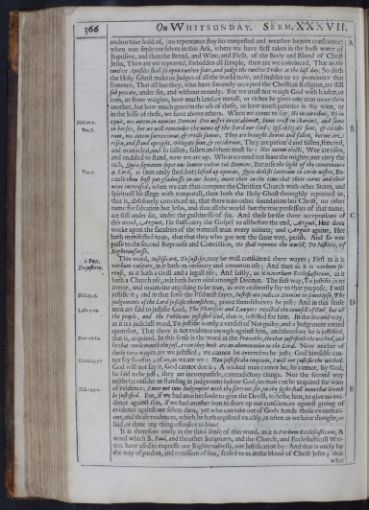 Serm. XXXVII.
On VVWhitsunday.
366
anchor take hold of, (no repentance stay his tempested and weather-beaten conscience)
Serm. XXXVII.
On VVWhitsunday.
366
anchor take hold of, (no repentance stay his tempested and weather-beaten conscience)
when wee finde our selves in this Ark, where we have first taken in the fresh water of
Baptisme, and then the Bread, and Wine, and Flesh, of the Body and Blood of Christ
Jesus, Then are we reproved, forbidden all scruple, then are we convinced, That as the
twelve Apostles shall sit upon twelve seats, and judge the twelve Tribes at the last day; So doth
the Holy Ghost make us Judges of all the world now, and inables us to pronounce that
sentence, That all but they, who have sincerely accepted the Christian Religion, are still
sub peccato, under sin, and without remedy. For we must not waigh God with leaden, or
iron, or stone waights, how much land, or metall, or riches he gives one man more then
another, but how much grace in the use of these, or how much patience in the want, or
in the losse of these, we have above others. When we come to say, Hi in curribus, Hi in
equis, Psal. 20.7. nos autem in nomine Domini Dei nostri invocabimus, Some trust in chariots, and some
in horses, Ver. 8. but we will remember the name of the Lord our God; Ipsi obligati sunt, & cecide-
runt, nos autem surreximus, & erecti sumus, They are brought downe and fallen, but we are
risen, and stand upright. Obligati sunt, & ceciderunt, They are pinion'd and fallen, fettered,
and manacled, and so fallen; fallen and there must lie: Nos autem erecti, Wee are risen,
and enabled to stand, now we are up. When we need not feare the mighty, nor envy the
rich, Quia signatum super nos lumen vultus tui Domine, Because the light of thy countenance
O Lord, Ver. 7. is (not onely shed, but) lifted up upon us, Quia dedisti lætitiam in corde nostro, Be-
cause thou hast put gladnesse in our heart, more then in the time that their corne and their
wine increased; when we can thus compare the Christian Church with other States, and
spirituall blessings with temporall, then hath the Holy Ghost throughly reproved us,
that is, absolutely convinced us, that there is no other foundation but Christ, no other
name for salvation but Jesus, and that all the world but the true professors of that name,
are still under sin, under the guiltinesse of sin. And these be the three acceptations of
this word, Arguet, He shall carry the Gospel to all before the end, Arguit, Hee does
worke upon the faculties of the naturall man every minute, and Arguit againe, Hee
hath manifested to us, that that they who goe not the same way, perish. And so wee
passe to the second Reproofe and Conviction, He shall reprove the world, De Iustitia, Of
Righteousnesse.
This word, 2 Part.
Dejustitia. Iustificare, To justifie, may be well considered three wayes; First as it is
verbum vulgare, as it hath an ordinary and common use; And then as it is verbum fo-
rense, as it hath a civill and a legall use; And lastly, as it is verbum Ecclesiasticum, as it
hath a Church use, as it hath been used amongst Divines. The first way, To justifie, is to
averre, and maintaine any thing to be true, as wee ordinarily say to that purpose, I will
justifie it;Psal. 19.9. and in that sense the Psalmist sayes, Iustificata judicia Domini in semetipso, The
judgements of the Lord justifie themselves, prove themselves to be just: And in this sense
men are said to justifie God, Luke 7.29. The Pharisees and Lawyers rejected the counsell of God, but all
the people, and the Publicans justified God, that is, testified for him. In the second way,
as it is a judiciall word, To justifie is only a verdict of Not guilty, and a Judgement entred
upon that, That there is not evidence enough against him, and therefore he is justified,
that is, Prov. 17.14. acquited. In this sense is the word in the Proverbs, He that justifieth the wicked, and
he that condemneth the just, even they both are an abomination to the Lord. Now neither of
these two wayes are we justified; we cannot be averred to be just; God himselfe can-
not say so of us;Exod. 23.7. of us, as we are we: Non justificabo impium, I will not justifie the wicked.
God will not say it, God cannot doe it; A wicked man cannot be, he cannot, by God,
be said to be just; they are incompatible, contradictory things. Nor the second way
neither; consider us standing in judgement before God, no man can be acquited for want
of evidence;Psal. 143.2. Enter not into Iudgement with thy servant, for, in thy sight shall none that liveth
be justified. For, if we had another soule to give the Devill, to bribe him, to give no evi-
dence against this, if we had another iron to seare up our consciences against giving of
evidence against our selves then, yet who can take out of Gods hands those examinati-
ons, and those evidences, which he hath registred exactly, as often as we have thought, or
said, or done any thing offensive to him?
It is therefore onely in the third sense of this word, as it is Verbum Ecclesiasticum, A
word which S. Paul, and the other Scriptures, and the Church, and Ecclesiasticall Wri-
ters have used to expresse our Righteousnesse, our Justification by: And that is onely by
the way of pardon, and remission of sins, sealed to us in the blood of Christ Jesus; that what
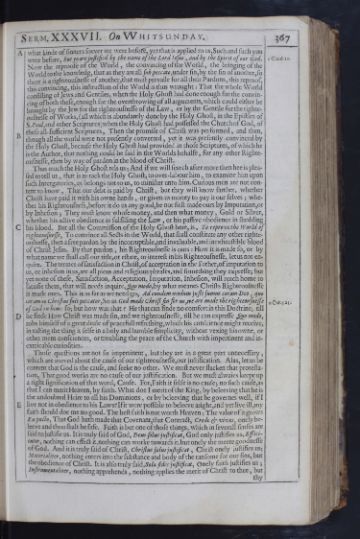 Serm. XXXVII.
On Whitsunday.
367
what kinde of sinners soever we were before, yet that is applied to us, Such and such you
Serm. XXXVII.
On Whitsunday.
367
what kinde of sinners soever we were before, yet that is applied to us, Such and such you
were before, But ye are justified by the name of the Lord Iesus, and by the Spirit of our God.1 Cor. 6 11.
Now the reproofe of the World, the convincing of the World, the bringing of the
World to the knowledg, that as they are all sub peccato, under sin, by the sin of another, so
there is a righteousnesse of another, that must prevaile for all their Pardons, this reproof,
this convincing, this instruction of the World is thus wrought: That the whole World
consisting of Jews and Gentiles, when the Holy Ghost had done enough for the convin-
cing of both these, enough for the overthrowing of all arguments, which could either be
brought by the Jew for the righteousnesse of the Law, or by the Gentile for the righte-
ousnesse of Works, (all which is abundantly done by the Holy Ghost, in the Epistles of
S. Paul, and other Scriptures) when the Holy Ghost had possessed the Church of God, of
these all-sufficient Scriptures, Then the promise of Christ was performed, and then,
though all the world were not presently converted, yet it was presently convinced by
the Holy Ghost, because the Holy Ghost had provided in those Scriptures, of which he
is the Author, that nothing could be said in the Worlds behalfe, for any other Righte-
ousnesse, then by way of pardon in the blood of Christ. Thus much the Holy Ghost tels us; And if we will search after more then hee is plea-
sed to tell us, that is to rack the Holy Ghost, to over-labour him, to examine him upon
such Intergatories, as belongs not to us, to minister unto him. Curious men are not con-
tent to know, That our debt is paid by Christ, but they will know farther, whether
Christ have paid it with his owne hands, or given us money to pay it our selves; whe-
ther his Righteousness, before it do us any good, be not first made ours by Imputation, or
by Inhesion; They must know whose money, and then what money, Gold or Silver,
whether his active obedience in fulfilling the Law, or his passive obedience in shedding
his blood. But all the Commission of the Holy Ghost here, is, To reprove the World of
righteousnesse, To convince all Sects in the World, that shall constitute any other righte-
ousnesse, then a free pardon by the incorruptible, and invaluable, and inexhaustible blood
of Christ Jesus. By that pardon, his Righteousnesse is ours: How it is made so, or by
what name we shall call our title, or estate, or interest in his Righteousnesse, let us not en-
quire. The termes of satisfaction in Christ, of acceptation in the Father, of imputation to
us, or inhesion in us, are all pious and religious phrases, and something they expresse; but
yet none of these, Satisfaction, Acceptation, Imputation, Inhesion, will reach home to
satisfie them, that will needs inquire, Quo modo, by what meanes Christs Righteousnesse
is made ours. This is as far as we need go, Ad eundem modum justi sumus coram Deo, quo
coram eo Christus fuit peccator, So as God made Christ sin for us,2 Cor. 5.21. we are made the righteousnesse
of God in him: so; but how was that? He that can finde no comfort in this Doctrine, till
he finde How Christ was made sin, and we righteousnesse, till he can expresse Quo modo,
robs himself of a great deale of peacefull refreshing, which his conscience might receive,
in tasting the thing it selfe in a holy and humble simplicity, without vexing his owne, or
other mens consciences, or troubling the peace of the Church with impertinent and in-
extricable curiosities. Those questions are not so impertinent, but they are in a great part unnecessary,
which are moved about the cause of our righteousnesse, our justification. Alas, let us be
content that God is the cause, and seeke no other. We must never slacken that protesta-
tion, That good works are no cause of our justification. But we must alwaies keepe up
a right signification of that word, Cause. For, Faith it selfe is no cause; no such cause, as
that I can merit Heaven, by faith. What doe I merit of the King, by beleeving that he is
the undoubted Heire to all his Dominions, or by beleeving that he governes well, if I
live not in obedience to his Laws? If it were possible to beleeve aright, and yet live ill, my
faith should doe me no good. The best faith is not worth Heaven; The value of it grows
Ex pacto, That God hath made that Covenant, that Contract, Crede & vives, onely be-
leeve and thou shalt be safe. Faith is but one of those things, which in severall senses are
said to justifie us. It is truly said of God, Deus solus justificat, God only justifies us; Effici-
enter, nothing can effect it, nothing can worke towards it, but onely the meere goodnesse
of God. And it is truly said of Christ, Christus solus justificat, Christ onely justifies us;
Materialiter, nothing enters into the substance and body of the ransome for our sins, but
the obedience of Christ. It is also truly said, Sola fides justificat, Onely faith justifies us;
Instrumentaliter, nothing apprehends, nothing applies the merit of Christ to thee, but thy
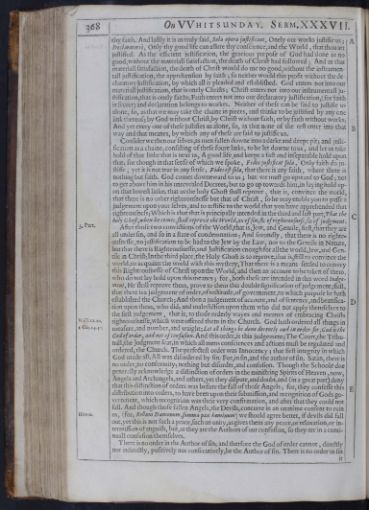 368
On VVhitsundayVVhitsunday.
Serm. XXXVII.
thy faith. And lastly it is as truly said, Sola opera justificant, Onely our works justifie us;
368
On VVhitsundayVVhitsunday.
Serm. XXXVII.
thy faith. And lastly it is as truly said, Sola opera justificant, Onely our works justifie us;
Declaratoriè, Only thy good life can assure thy conscience, and the World, that thou art
justified. As the efficient justification, the gracious purpose of God had done us no
good, without the materiall satisfaction, the death of Christ had followed; And as that
materiall satisfaction, the death of Christ would do me no good, without the instrumen-
tall justification, the apprehension by faith; so neither would this profit without the de-
claratory justification, by which all is pleaded and established. God enters not into our
materiall justification, that is onely Christs; Christ enters not into our instrumentall ju-
stification, that is onely faiths; Faith enters not into our declaratory justification, (for faith
is secret) and declaration belongs to workes. Neither of these can be said to justifie us
alone, so, as that we may take the chaine in pieces, and thinke to be justified by any one
link thereof; by God without Christ, by Christ without faith, or by faith without works;
And yet every one of these justifies us alone, so, as that none of the rest enter into that
way and that meanes, by which any of these are said to justifie us. Consider we then our selves, as men fallen downe into a darke and deepe pit; and justi-
fication as a chaine, consisting of these foure links, to be let downe to us, and let us take
hold of that linke that is next us, A good life, and keepe a fast and inseparable hold upon
that; for though in that sense of which we spoke, Fides justificat sola, Only faith do ju-
stifie, yet it is not true in any sense, Fides est sola, that there is any faith, where there is
nothing but faith. God comes downeward to us; but we must go upward to God; not
to get above him in his unrevealed Decrees, but to go up towards him, in laying hold up-
on that lowest linke; that as the holy Ghost shall reprove, that is, convince the world,
that there is no other righteousnesse but that of Christ, so he may enable you to passe a
judgement upon your selves, and to testifie to the world that you have apprehended that
righteousness; Which is that that is principally intended in the third and last part, That the
holy Ghost, when he comes, shall reprove the World, as of sin, & of righteousness, so of judgment. After those two convictions of the World, that is, Jew, and Gentile, first, that they are 3. Part.
all under sin, and so in a state of condemnation; And secondly, that there is no righte-
ousnesse, no justification to be had to the Jew by the Law, nor to the Gentile in Nature,
but that there is Righteousnesse, and Justification enough for all the world, Jew, and Gen-
tile in Christ; In the third place, the Holy Ghost is to reprove, that is, still to convince the
world, to acquaint the world with this mystery, That there is a means settled to convey
this Righteousnesse of Christ upon the World, and then an account to be taken of them,
who do not lay hold upon this meanes; for, both these are intended in this word Iudge-
ment, He shall reprove them, prove to them this double signification of judgement; first,
that there is a judgement of order, of rectitude, of government, to which purpose he hath
established the Church; And then a judgement of account, and of sentence, and beatifica-
tion upon them, who did; and malediction upon them who did not apply themselves to
the first judgement, that is, to those orderly wayes and meanes of embracing Christs
righteousnesse, Wisd. 11.20. which were offered them in the Church. God hath ordered all things in
measure, 1 Cor. 14.40. and number, and waight; Let all things be done decently and in order: for, God is the
God of order, and not of confusion. And this order, is this judgement; The Court, the Tribu-
nall, the Judgment seat, in which all mens consciences and actions must be regulated and
ordered, the Church. The perfectest order was Innocency; that first integrity in which
God made all. All was disordered by sin: For, in sin, and the author of sin, Satan, there is
no order, no conformity; nothing but disorder, and confusion. Though the Schoole doe
generally acknowledge a distinction of orders in the ministring Spirits of Heaven, now,
Angels and Archangels, and others, yet they dispute, and doubt, and (in a great part) deny
that this distinction of orders was before the fall of those Angels; for, they confesse this
distribution into orders, to have been upon their submission, and recognition of Gods go-
vernment, which recognition was their very confirmation, and after that they could not
fall. And though those fallen Angels, the Devils, concurre in an unanime consent to ruin
us, Hieron. (for, Bellum Dæmonum, summa pax hominum) we should agree better, if devils did fall
out, yet this is not such a peace, such an unity, as gives them any peace, or relaxation, or in-
termission of anguish, but, as they are the Authors of our confusion, so they are in a conti-
nuall confusion themselves. There is no order in the Author of sin; and therfore the God of order cannot, directly
nor indirectly, positively nor consecutively, be the Author of sin. There is no order in sin it
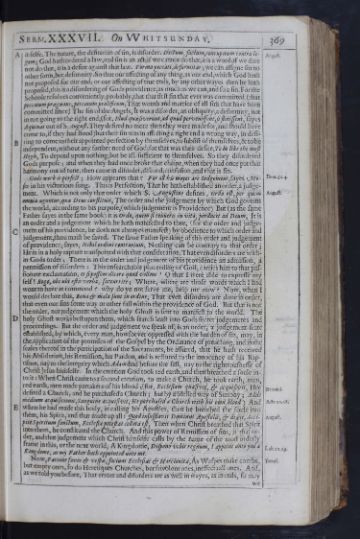 Serm. XXXVII.
On VVhitsundayVVhitsunday.
369
it selfe. The nature, the definition of sin, is disorder. Dictum, factum, August. concupitum contra le-
Serm. XXXVII.
On VVhitsundayVVhitsunday.
369
it selfe. The nature, the definition of sin, is disorder. Dictum, factum, August. concupitum contra le-gem; God hath ordered a law, and sin is an act; if we cannot do that, it is a word; if we dare
not do that, it is a desire against that law. Forma peccati, deformitas; we can assigne sin no
other form, but deformity. So that our affecting of any thing, as our end, which God hath
not proposed for our end; or our affecting of true ends, by any other wayes then he hath
proposed, this is a disordering of Gods providence, as much as we can, and so a sin. For the
Schoole resolves conveniently, probably, that that first sin that ever was committed, (that
peccatum prægnans, peccatum prolificum, That womb and matrice of all sins that have been
committed since) The sin of the Angels, it was a disorder, an obliquity, a deformity, not
in not going to the right end, (for, Illud quæsiverunt, ad quod pervenissent, si stetissent, sayes
Aquinas out of S. August. They desired no more then they were made for, and should have
come to, if they had stood) but their sin was in affecting a right end a wrong way, in desi-
ring to come to their appointed perfection by themselves, to subsist of themselves, & to be
independent, without any farther need of God, for that was their desire, To be like the most
High, To depend upon nothing, but be all-sufficient to themselves. So they disordered
Gods purpose; and when they had once broke that chaine, when they had once put that
harmony out of tune, then came in disorder, discord, confusion, and that is sin. Gods work is perfect; How appeares that? For all his wayes are Iudgement, Deut. 32.4. sayes Mo-
ses in his victorious song. This is Perfection, That he hath established an order, a judge-
ment. Which is not only that order which S. Augustine defines, Ordo est, August. per quem
omnia aguntur, quæ Deus constituit, The order and the judgement by which God governs
the world, according to his purpose, (which judgement is Providence) But (as the same
Father sayes in the same book) it is Ordo, quem si tenueris in vita, perducet ad Deum, It is
an order and a judgement which he hath manifested to thee, (for the order and judge-
ment of his providence, he doth not alwayes manifest) by obedience to which order and
judgement, thou maist be saved. The same Father speaking of this order and judgement
of providence, sayes, Nihil ordini contrarium, Nothing can be contrary to that order;
He is in a holy rapture transported with that consideration, That even disorders are with-
in Gods order; There is in the order and judgement of his providence an admission, a
permission of disorders: This unsearchable proceeding of God, carries him to that pas-
sionate exclamation, O si possem dicere quod vellem! O that I were able to expresse my
self! Rogo, ubi ubi estis verba, succurrite; Where, where are those words which I had
wont to have at command? why do ye not serve me, help me now? Now, when I
would declare this, Bona & mala sunt in ordine, That even disorders are done in order,
that even our sins some way or other fall within the providence of God. But that is not
the order, nor judgement which the holy Ghost is sent to manifest to the world. The
holy Ghost works best upon them, which search least into Gods secret judgements and
proceedings. But the order and judgement we speak of, is an order, a judgement-seate
established, by which, every man, howsoever oppressed with the burden of sin, may, in
the application of the promises of the Gospel by the Ordinance of preaching, and in the
seales thereof in the participation of the Sacraments, be assured, that he hath received
his Absolution, his Remission, his Pardon, and is restored to the innocency of his Bap-
tisme, nay to the integrity which Adam had before the fall, nay to the righteousnesse of
Christ Jesus himselfe. In the creation God took red earth, and then breathed a soule in-
to it: When Christ came to a second creation, to make a Church, he took earth, men,
red earth, men made partakers of his blood; (for, Ecclesiam quæsivit, & acquisivit, Bernard. Hee
desired a Church, and he purchased a Church; but by a blessed way of Simony; Adde
medium acquisitionis, Sanguine acquisivit, Acts 20.28. He purchased a Church with his own blood) And
when he had made this body, in calling his Apostles, then he breathed the soule into
them, his Spirit, and that made up all: Quod insufflavit Dominus Apostolis, & dixit, August. Acci-
pite Spiritum sanctum, Ecclesiæ potestas collata est, Then when Christ breathed that Spirit
into them, he constituted the Church. And this power of Remission of sins, is that or-
der, and that judgement which Christ himselfe calls by the name of the most orderly
frame in this, or the next world, A Kingdome, Dispono vobis regnum, Luk. 22.29. I appoint unto you a
Kingdome, as my Father hath appointed unto me. Now, Faciunt favos & vespæ, faciunt Ecclesias & Marcionitæ, As Waspes make combs, Tertul.
but empty ones, so do Heretiques Churches, but frivolous ones, ineffectuall ones. And,
as we told you before, That errors and disorders are as well in wayes, as in ends, so may we
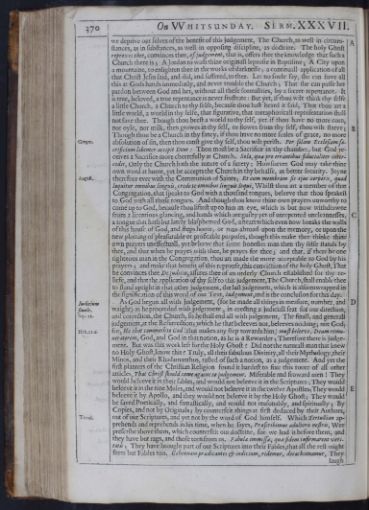 370
On Whitsunday.
Serm. XXXVII.
we deprive our selves of the benefit of this judgement, The Church, as well in circum-
370
On Whitsunday.
Serm. XXXVII.
we deprive our selves of the benefit of this judgement, The Church, as well in circum-stances, as in substances, as well in opposing discipline, as doctrine. The holy Ghost
reproves thee, convinces thee, of judgement, that is, offers thee the knowledge that such a
Church there is; A Jordan to wash thine originall leprosie in Baptisme; A City upon
a mountaine, to enlighten thee in the works of darknesse; a continuall application of all
that Christ Jesus said, and did, and suffered, to thee. Let no soule say, she can have all
this at Gods hands immediatly, and never trouble the Church; That she can passe her
pardon between God and her, without all these formalities, by a secret repentance. It
is true, beloved, a true repentance is never frustrate: But yet, if thou wilt think thy selfe
a little Church, a Church to thy selfe, because thou hast heard it said, That thou art a
little world, a world in thy selfe, that figurative, that metaphoricall representation shall
not save thee. Though thou beest a world to thy self, yet if thou have no more corn,
nor oyle, nor milk, then growes in thy self, or flowes from thy self, thou wilt starve;
Though thou be a Church in thy fancy, if thou have no more seales of grace, no more
Gregor. absolution of sin, then thou canst give thy self, thou wilt perish. Per solam Ecclesiam sa-
crificium libenter accipit Deus: Thou maist be a Sacrifice in thy chamber, but God re-
ceives a Sacrifice more cheerefully at Church. Sola, quæ pro errantibus fiducialiter inter-
cedit, Only the Church hath the nature of a surety; Howsoever God may take thine
own word at home, yet he accepts the Church in thy behalfe, as better security. Joyne
August. therefore ever with the Communion of Saints; Et cum membrum sis ejus corporis, quod
loquitur omnibus linguis, crede te omnibus linguis loqui, Whilst thou art a member of that
Congregation, that speaks to God with a thousand tongues, beleeve that thou speakest
to God with all those tongues. And though thou know thine own prayers unworthy to
come up to God, because thou liftest up to him an eye, which is but now withdrawne
from a licentious glancing, and hands which are guilty yet of unrepented uncleannesses,
a tongue that hath but lately blasphemed God, a heart which even now breaks the walls
of this house of God, and steps home, or runs abroad upon the memory, or upon the
new plotting of pleasurable or profitable purposes, though this make thee thinke thine
own prayers uneffectuall, yet beleeve that some honester man then thy selfe stands by
thee, and that when he prayes with thee, he prayes for thee; and that, if there be one
righteous man in the Congregation, thou art made the more acceptable to God by his
prayers; and make that benefit of this reproofe, this conviction of the holy Ghost, That
he convinces thee De judicio, assures thee of an orderly Church established for thy re-
liefe, and that the application of thy self to this judgement, The Church, shall enable thee
to stand upright in that other judgement, the last judgement, which is also enwrapped in
the signification of this word of our Text, Iudgement, and is the conclusion for this day.
Iudicium
finale.
Sap. 11. As God begun all with judgement, (for he made all things in measure, number, and
waight) as he proceeded with judgement, in erecting a judiciall seat for our direction,
and correction, the Church, so he shall end all with judgement, The finall, and generall
judgement, at the Resurrection; which he that beleeves not, beleeves nothing; not God;
Heb. 11.6. for, He that commeth to God (that makes any step towards him) must beleeve, Deum remu-
ner atorem, God, and God in that notion, as he is a Rewarder; Therefore there is judge-
ment. But was this work left for the Holy Ghost? Did not the naturall man that knew
no Holy Ghost, know this? Truly, all their fabulous Divinity, all their Mythology, their
Minos, and their Rhadamanthus, tasted of such a notion, as a judgement. And yet the
first planters of the Christian Religion found it hardest to fixe this roote of all other
articles, That Christ should come againe to judgement. Miserable and froward men! They
would beleeve it in their fables, and would not beleeve it in the Scriptures; They would
beleeve it in the nine Muses, and would not beleeve it in the twelve Apostles; They would
beleeve it by Apollo, and they would not beleeve it by the Holy Ghost; They would
be saved Poetically, and fantastically, and would not reasonably, and spiritually; By
Copies, and not by Originals; by counterfeit things at first deduced by their Authors,
Tertul. out of our Scriptures, and yet not by the word of God himself. Which Tertullian ap-
prehends and reprehends in his time, when he sayes, Præscribimus adulteris nostris, Wee
prescribe above them, which counterfeit our doctrine, for we had it before them, and
they have but rags, and those torn from us. Fabulæ immissæ, quæ fidem infirmarent veri-
tatis; They have brought part of our Scriptures into their Fables, that all the rest might
seem but Fables too. Gehennam prædicantes & iudicium, ridemur, decachinnamur, They laugh
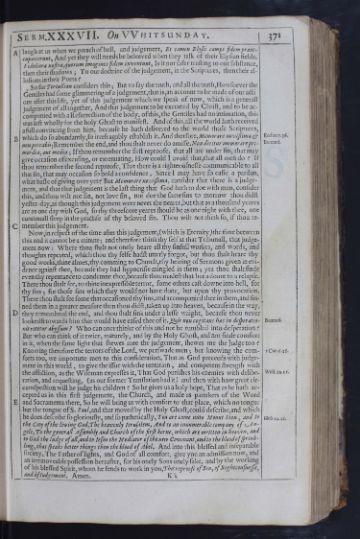 Serm. XXXVII.
On VVWhitsunday.
371
laugh at us when we preach of hell, and judgement, Et tamen Elysii campi fidem præoc-
Serm. XXXVII.
On VVWhitsunday.
371
laugh at us when we preach of hell, and judgement, Et tamen Elysii campi fidem præoc-cupaverunt, And yet they will needs be beleeved when they talk of their Elysian fields.
Fideliora nostra, quorum imagines fidem inveniunt, Is it not safer trusting to our substance,
then their shadows; To our doctrine of the judgement, in the Scriptures, then their al-
lusions in their Poets?
So far Tertullian considers this; But to say the truth, and all the truth, Howsoever the
Gentiles had some glimmering of a judgement, that is, an account to be made of our acti-
ons after this life, yet of this judgement which we speak of now, which is a generall
Judgement of all together, And that judgement to be executed by Christ, and to be ac-
companied with a Resurrection of the body, of this, the Gentiles had no intimation, this
was left wholly for the holy Ghost to manifest. And of this, all the world hath received
a full convincing from him, because he hath delivered to the world those Scriptures,
which do so abundantly, so irrefragably establish it. And therfore, Ecclus. 7.36. Memorare novissima &
non peccabis; Bernard. Remember the end, and thou shalt never do amisse. Non dicitur memorare pri-
mordia, aut media; If thou remember the first reproofe, that all are under sin, that may
give occasion of excusing, or extenuating, How could I avoid that, that all men do? If
thou remember the second reproofe, That there is a righteousnesse communicable to all
that sin, that may occasion so bold a confidence, Since I may have so easie a pardon,
what haste of giving over yet? But Memorare novissima, consider that there is a judge-
ment, and that that judgement is the last thing that God hath to doe with man, consider
this, and thou wilt not sin, not love sin, not doe the same sins to morrow thou didst
yester-day, as though this judgement were never the nearer, but that as a thousand yeares
are as one day with God, so thy threescore yeares should be as one night with thee, one
continuall sleep in the practise of thy beloved sin. Thou wilt not think so, if thou re-
member this judgement.
Now, in respect of the time after this judgement, (which is Eternity) the time between
this and it cannot be a minute; and therefore think thy self at that Tribunall, that judge-
ment now: Where thou shalt not onely heare all thy sinfull workes, and words, and
thoughts repeated, which thou thy selfe hadst utterly forgot, but thou shalt heare thy
good works, thine almes, thy comming to Church, thy hearing of Sermons given in evi-
dence against thee, because they had hypocrisie mingled in them; yea thou shalt finde
even thy repentance to condemne thee, because thou madest that but a doore to a relapse.
There thou shalt see, to thine inexpressible terror, some others cast downe into hell, for
thy sins; for those sins which they would not have done, but upon thy provocation.
There thou shalt see some that occasioned thy sins, and accompanied thee in them, and sin-
ned them in a greater measure then thou didst, taken up into heaven, because in the way,
they remembred the end, and thou shalt sink under a lesse waight, because thou never
lookedst towards him that would have eased thee of it.Bernard. Quis non cogitans hæc in desperatio-
nis rotetur abyssum? Who can once thinke of this and not be tumbled into desperation?
But who can think of it twice, maturely, and by the Holy Ghost, and not finde comfort
in it, when the same light that shewes mee the judgement, shewes me the Judge too?
Knowing therefore the terrors of the Lord, we perswade men;1 Cor. 5.15. but knowing the com-
forts too, we importune men to this consideration, That as God preceeds with judge-
ment in this world, to give the issue with the tentation, and competent strength with
the affliction, as the Wiseman expresses it, Wisd. 12.21. That God punishes his enemies with delibe-
ration, and requesting, (as our former Translation had it) and then with how great cir-
cumspection will he judge his children? So he gives us a holy hope, That as he hath ac-
cepted us in this first judgement, the Church, and made us partakers of the Word
and Sacraments there, So he will bring us with comfort to that place, which no tongue
but the tongue of S. Paul, and that moved by the Holy Ghost, could describe, and which
he does describe so gloriously, and so pathetically, You are come unto Mount Sion,Heb.12.22. and to
the City of the living God, The heavenly Ierusalem, And to an innumerable company of An-
gels, To the generall Assembly and Church of the first borne, which are written in heaven, and
to God the Iudge of all, and to Iesus the Mediator of the new Covenant, and to the blood of sprink-
ling, that speaks better things then the blood of Abel. And into this blessed and inseparable
society, The Father of lights, and God of all comfort, give you an admission now, and
an irremoveable possession hereafter, for his onely Sons onely sake, and by the working
of his blessed Spirit, whom he sends to work in you, This reproofe of Sin, of Righteousnesse,
and of Iudgement. Amen. Kk
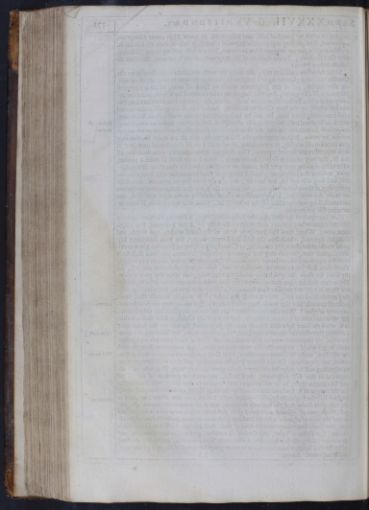
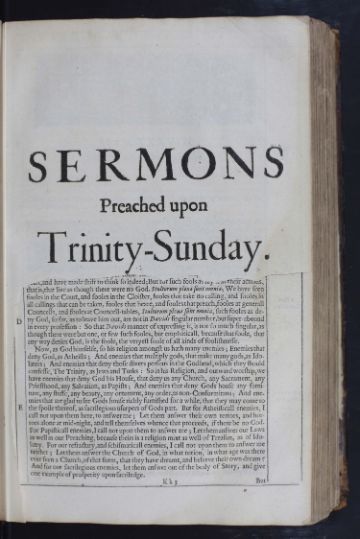
SERMONS
Preached upon
Trinity-Sunday. Kk2
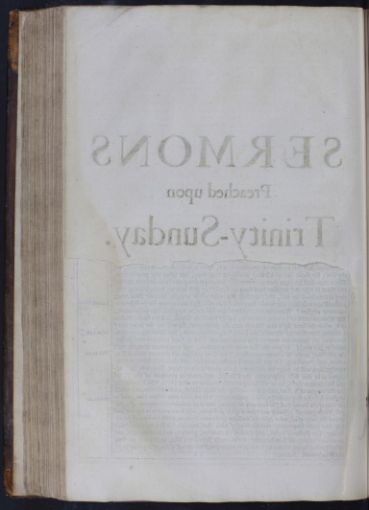
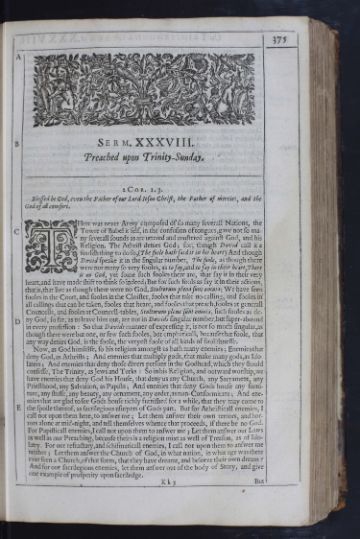 375
375
Serm. XXXVIII.
Preached upon Trinity-Sunday.
2 Cor. 1.3.
Blessed be God, even the Father of our Lord Iesus Christ, the Father of mercies, and the
God of all comfort.
THereThere was never Army composed of so many severall Nations, the
Towre of Babel it self, in the confusion of tongues, gave not so ma-
ny severall sounds as are uttered and mustered against God, and his
Religion. The Atheist denies God; for, though David call it a
foolish thing to do so, (The foole hath said it in his heart) And though
David speake it in the singular number, The foole, as though there
were not many so very fooles, as to say, and to say in their heart, There
is no God, yet some such fooles there are, that say it in their very
heart, and have made shift to think so indeed; But for such fools as say it in their actions,
that is, that live as though there were no God, Stultorum plena sunt omnia; We have seen
fooles in the Court, and fooles in the Cloister, fooles that take no calling, and fooles in
all callings that can be taken, fooles that heare, and fooles that preach, fooles at generall
Councells, and fooles at Councell-tables, Stultorum plena sunt omnia, such fooles as de-
ny God, so far, as to leave him out, are not in Davids singular number, but super-abound
in every profession: So that Davids manner of expressing it, is not so much singular, as
though there were but one, or few such fooles, but emphaticall, because that foole, that
any way denies God, is the foole, the veryest foole of all kinds of foolishnesse.
Now, as God himselfe, so his religion amongst us hath many enemies; Enemies that
deny God, as Atheists; And enemies that multiply gods, that make many gods, as Ido-
laters; And enemies that deny those divers persons in the Godhead, which they should
confesse, The Trinity, as Jews and Turks: So in his Religion, and outward worship, we
have enemies that deny God his House, that deny us any Church, any Sacrament, any
Priesthood, any Salvation, as Papists; And enemies that deny Gods house any furni-
ture, any stuffe, any beauty, any ornament, any order, as non-Conformitans; And ene-
mies that are glad to see Gods house richly furnished for a while, that they may come to
the spoile thereof, as sacrilegious usurpers of Gods part. But for Atheisticall enemies, I
call not upon them here, to answer me; Let them answer their own terrors, and hor-
rors alone at mid-night, and tell themselves whence that proceeds, if there be no God.
For Papisticall enemies, I call not upon them to answer me; Let them answer our Laws
as well as our Preaching, because theirs is a religion mixt as well of Treason, as of Ido-
latry. For our refractary, and schismaticall enemies, I call not upon them to answer me
neither; Let them answer the Church of God, in what nation, in what age was there
ever seen a Church, of that form, that they have dreamt, and beleeve their own dream?
And for our sacrilegious enemies, let them answer out of the body of Story, and give
one example of prosperity upon sacriledge. Kk3 But
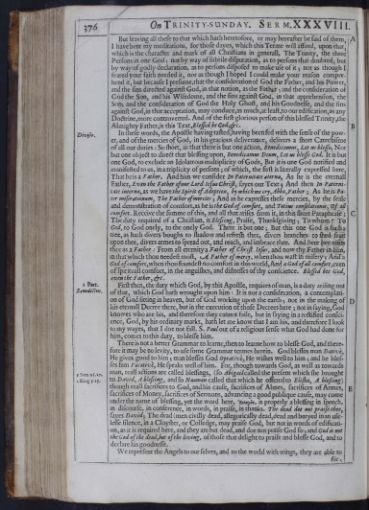 376
On Trinity-Sunday.
Serm. XXXVIII.
376
On Trinity-Sunday.
Serm. XXXVIII.
But leaving all these to that which hath heretofore, or may hereafter be said of them,
I have bent my meditations, for those dayes, which this Terme will afford, upon that,
which is the character and mark of all Christians in generall, The Trinity, the three
Persons in one God; not by way of subtile disputation, as to persons that doubted, but
by way of godly declaration, as to persons disposed to make use of it; not as though I
feared your faith needed it, nor as though I hoped I could make your reason compre-
hend it, but because I presume, that the consideration of God the Father, and his Power,
and the sins directed against God, in that notion, as the Father; and the consideration of
God the Son, and his Wisedome, and the sins against God, in that apprehension, the
Son; and the consideration of God the Holy Ghost, and his Goodnesse, and the sins
against God, in that acceptation, may conduce, as much, at least, to our edification, as any
Doctrine, more controverted. And of the first glorious person of this blessed Trinity, the
Almighty Father, is this Text, Blessed be God, &c.
In these words, Divisio. the Apostle having tasted, having been fed with the sense of the pow-
er, and of the mercies of God, in his gracious deliverance, delivers a short Catechisme
of all our duties: So short, as that there is but one action, Benedicamus, Let us blesse; Nor
but one object to direct that blessing upon, Benedicamus Deum, Let us blesse God. It is but
one God, to exclude an Idolatrous multiplicity of Gods, But it is one God notified and
manifested to us, in a triplicity of persons; of which, the first is literally expressed here,
That he is a Father. And him we consider In Paternitate æterna, As he is the eternall
Father, Even the Father of our Lord Iesus Christ, sayes our Text; And then In Paterni-
tate interna, as we have the Spirit of Adoption, by which we cry, Abba, Father; As he is Pa-
ter miserationum, The Father of mercies; And as he expresses these mercies, by the seale
and demonstration of comfort, as he is the God of comfort, and Totius consolationis, Of all
comfort. Receive the summe of this, and all that arises from it, in this short Paraphrase;
The duty required of a Christian, is Blessing, Praise, Thanksgiving; To whom? To
God, to God onely, to the onely God. There is but one; But this one God is such a
tree, as hath divers boughs to shadow and refresh thee, divers branches to shed fruit
upon thee, divers armes to spread out, and reach, and imbrace thee. And here hee visits
thee as a Father: From all eternity a Father of Christ Iesus, and now thy Father in him
in that which thou needest most, A Father of mercy, when thou wast in misery; And a
God of comfort, when thou foundest no comfort in this world, And a God of all comfort, even
of spirituall comfort, in the anguishes, and distresses of thy conscience. Blessed bee God,
even the Father, &c.
First then, 1 Part.
Benedictus. the duty which God, by this Apostle, requires of man, is a duty arising out
of that, which God hath wrought upon him: It is not a consideration, a contemplati-
on of God sitting in heaven, but of God working upon the earth; not in the making of
his eternall Decree there, but in the execution of those Decrees here; not in saying, God
knowes who are his, and therefore they cannot faile, but in saying in a rectified consci-
ence, God, by his ordinary marks, hath let me know that I am his, and therefore I look
to my wayes, that I doe not fall. S. Paul out of a religious sense what God had done for
him, comes to this duty, to blesse him.
There is not a better Grammar to learne, then to learne how to blesse God, and there-
fore it may be no levity, to use some Grammar termes herein. God blesses man Dativè,
He gives good to him; man blesses God Optativè, He wishes well to him; and he bles-
ses him Vocativè, He speaks well of him. For, though towards God, as well as towards
man, reall actions are called blessings, (so Abigail called the present which she brought
to David, 1 Sam. 25.27. A blessing, and so Naaman called that which he offered to Elisha, A blessing)
though reall sacrifices to God, and his cause, sacrifices of Almes, sacrifices of Armes, 2 King 5.15.
sacrifices of Money, sacrifices of Sermons, advancing a good publique cause, may come
under the name of blessing, yet the word here, ᾽Ευλογίæα, is properly a blessing in speech,
in discourse, in conference, in words, in praise, in thanks. The dead doe not praise thee,
sayes David; The dead (men civilly dead, allegorically dead, dead and buryed in an use-
lesse silence, in a Cloyster, or Colledge, may praise God, but not in words of edificati-
on, as it is required here, and they are but dead, and doe not praise God so; and God is not
the God of the dead, but of the living, of those that delight to praise and blesse God, and to
declare his goodnesse.
We represent the Angels to our selves, and to the world with wings, they are able to flie;
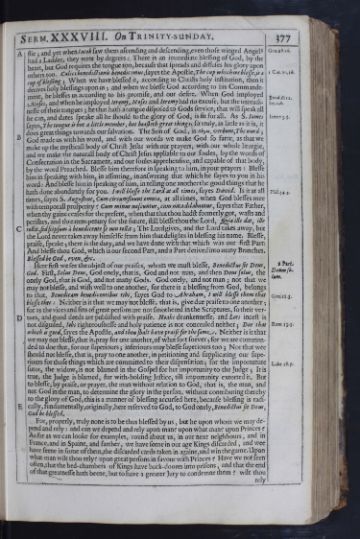 Serm. XXXVIII.
On Trinity-Sunday.
377
flie; and yet when Iacob saw them ascending and descending, Gen. 28.12. even those winged Angels
Serm. XXXVIII.
On Trinity-Sunday.
377
flie; and yet when Iacob saw them ascending and descending, Gen. 28.12. even those winged Angels
had a Ladder, they went by degrees: There is an immediate blessing of God, by the
heart, but God requires the tongue too, because that spreads and diffuses his glory upon
others too. Calici benedictionis benedicimus, sayes the Apostle, The cup which we blesse,1 Cor. 10.16. is a
cup of blessing; When we have blessed it, according to Christs holy institution, then it
derives holy blessings upon us; and when we blesse God according to his Commande-
ment, he blesses us according to his promise, and our desire.Exod. 6.12. When God imployed
Moses, Ier. 1.6. and when he imployed Ieremy, Moses and Ieremy had no excuse, but the unreadi-
nesse of their tongues; he that hath a tongue disposed to Gods service, that will speak all
he can, and dares speake all he should to the glory of God, is fit for all.Iames 3.5. As S. Iames
sayes, The tongue is but a little member, but boasteth great things; so truly, as little as it is, it
does great things towards our salvation. The Son of God, is Λόγος, verbum, The word;
God made us with his word, and with our words we make God so farre, as that we
make up the mysticall body of Christ Jesus with our prayers, with our whole liturgie,
and we make the naturall body of Christ Jesus appliable to our soules, by the words of
Consecration in the Sacrament, and our soules apprehensive, and capable of that body,
by the word Preached. Blesse him therefore in speaking to him, in your prayers: Blesse
him in speaking with him, in assenting, in answering that which he sayes to you in his
word: And blesse him in speaking of him, in telling one another the good things that he
hath done abundantly for you. I will blesse the Lord at all times, sayes David.Psal. 34.2. Is it at all
times, sayes S. Augustine, Cum circumfluunt omnia, at all times, when God blesses mee
with temporall prosperity? Cum minus nascuntur, cum nata dilabuntur, sayes that Father,
when thy gaine ceases for the present, when that that thou hadst formerly got, wasts and
perishes, and threatens penury for the future, still blesse thou the Lord, Quia ille dat, ille
tollit, sed seipsum à benedicente se non tollit; The Lord gives, and the Lord takes away, but
the Lord never takes away himselfe from him that delights in blessing his name. Blesse,
praise, speake; there is the duty, and we have done with that which was our first Part:
And blesse thou God, which is our second Part, and a Part derived into many Branches.
Blessed be God, even, &c.
Here first we see the object of our praises, whom we must blesse, Benedictus sit Deus,
God.2 Part.
Deum so-
lum. First, Solus Deus, God onely, that is, God and not man, and then Deus solus, the
onely God, that is God, and not many Gods. God onely, and not man; not that we
may not blesse, and wish well to one another, for there is a blessing from God, belongs
to that, Benedicam benedicentibus tibi, sayes God to Abraham, Gen. 12.3. I will blesse them that
blesse thee: Neither is it that we may not blesse, that is, give due praise to one another;
for as the vices and sins of great persons are not smothered in the Scriptures, so their ver-
tues, and good deeds are published with praise. Noahs drunkennesse, and Lots incest is
not disguised, Iobs righteousnesse and holy patience is not concealed neither;Rom. 13.3. Doe that
which is good, sayes the Apostle, and thou shalt have praise for the same. Neither is it that
we may not blesse, that is, pray for one another, of what sort soever; for we are comman-
ded to doe that, for our superiours; inferiours may blesse superiours too; Nor that wee
should not blesse, that is, pray to one another, in petitioning and supplicating our supe-
riours for those things which are committed to their dispensation;Luke 18.5. for the importunate
sutor, the widow, is not blamed in the Gospel for her importunity to the Judge; It is
true, the Judge is blamed, for with-holding Justice, till importunity extorted it. But
to blesse, by praise, or prayer, the man without relation to God, that is, the man, and
not God in the man, to determine the glory in the person, without contributing thereby
to the glory of God, this is a manner of blessing accursed here, because blessing is radi-
cally, fundamentally, originally, here reserved to God, to God onely, Benedictus sit Deus,
God be blessed.
For, properly, truly none is to be thus blessed by us, but he upon whom we may de-
pend and rely: and can we depend and rely upon man? upon what man? upon Princes?
As far as we can looke for examples, round about us, in our next neighbours, and in
France, and in Spaine, and farther, we have seene in our age Kings discarded, and wee
have seene in some of them, the discarded cards taken in againe, and win the game. Upon
what man wilt thou rely? upon great persons in favour with Princes? Have we not seen
often, that the bed-chambers of Kings have back-doores into prisons, and that the end
of that greatnesse hath beene, but to have a greater Jury to condemne them? wilt thou rely
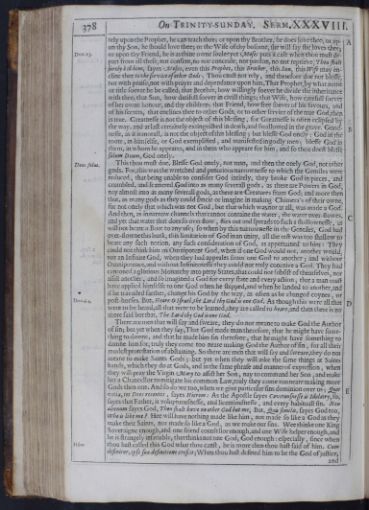 378
On Trinity-Sunday.
Serm. XXXVIII.
rely upon the Prophet, he can teach thee; or upon thy Brother, he does love thee; or up-
378
On Trinity-Sunday.
Serm. XXXVIII.
rely upon the Prophet, he can teach thee; or upon thy Brother, he does love thee; or up-on thy Son, he should love thee; or the Wife of thy bosome, she will say she loves thee;
or upon thy Friend, Deut. 13. he is as thine owne soule? yet Moses puts a case when thou must de-
part from all these, not consent, no not conceale, not pardon, no not reprieve, Thou shalt
surely kill him, sayes Moses, even this Prophet, this Brother, this Son, this Wife may en-
cline thee to the service of other Gods; Thou canst not rely, and therefore doe not blesse,
not with praise, not with prayer and dependance upon him, That Prophet, by what name
or title soever he be called; that Brother, how willingly soever he divide the inheritance
with thee; that Son, how dutifull soever in civill things; that Wife, how carefull soever
of her owne honour, and thy children; that Friend, how free soever of his favours, and
of his secrets, that enclines thee to other Gods, or to other service of the true God, then
is true. Greatnesse is not the object of this blessing, for Greatnesse is often eclipsed by
the way, and at last certainely extinguished in death, and swallowed in the grave. Good-
nesse, as it is morall, is not the object of this blessing; but blesse God onely; God in the
roote, in himselfe, or God exemplified, and manifested in godly men; blesse God in
them, in whom he appeares, and in them who appeare for him, and so thou doest blesse
solum Deum, God onely.
This thou must doe, Deus solus. Blesse God onely, not man, and then the onely God, not other
gods. For, this was the wretched and penurious narrownesse to which the Gentiles were
reduced, that being unable to consider God intirely, they broke God in pieces, and
crumbled, and scattered God into as many severall gods, as there are Powers in God,
nay almost into as many severall gods, as there are Creatures from God; and more then
that, as many gods as they could fancie or imagine in making Chimera's of their owne,
for not onely that which was not God, but that which was not at all, was made a God.
And then, as in narrow channels that cannot containe the water, the water over-flowes,
and yet that water that does so over flow, flies out and spreads to such a shallownesse, as
will not beare a Boat to any use; so when by this narrownesse in the Gentiles, God had
over-flowne this bank, this limitation of God in an unity, all the rest was too shallow to
beare any such notion, any such consideration of God, as appertained to him: They
could not think him an Omnipotent God, when if one God would not, another would,
nor an Infinite God, when they had appeales from one God to another; and without
Omnipotence, and without Infinitenesse they could not truly conceive a God. They had
cantoned a glorious Monarchy into petty States, that could not subsist of themselves, nor
assist another, and so imagined a God for every state and every action, that a man must
have applied himselfe to one God when he shipped, and when he landed to another, and
if he travailed farther, change his God by the way, as often as he changed coynes, or
post-horses.Deut. 6.4. But, Heare O Israel, the Lord thy God is one God. As though this were all that
were to be heard, all that were to be learned, they are called to heare, and then there is no
more said but that, The Lord thy God is one God.
There are men that will say and sweare, they do not meane to make God the Author
of sin; but yet when they say, That God made man therefore, that he might have some-
thing to damne, and that he made him sin therefore, that he might have something to
damne him for, truly they come too neare making God the Author of sin, for all their
modest protestation of abstaining. So there are men that will say and sweare, they do not
meane to make Saints Gods; but yet when they will aske the same things at Saints
hands, which they do at Gods, and in the same phrase and manner of expression, when
they will pray the Virgin Mary to assist her Son, nay to command her Son, and make
her a Chancellor to mitigate his common Law, truly they come too neare making more
Gods then one. And so do we too, when we give particular sins dominion over us; Quot
vitia, tot Deos recentes, sayes Hierom: As the Apostle sayes Covetousnesse is Idolatry, so,
sayes that Father, is voluptuousnesse, and licentiousnesse, and every habituall sin. Non
alienum sayes God, Thou shalt have no other God but me, But, Quis similis, sayes God too,
Who is like me? Hee will have nothing made like him, not made so like a God as they
make their Saints, nor made so like a God, as we make our sins. Wee thinke one King
Soveraigne enough, and one friend counsellor enough, and one Wife helper enough, and
he is strangely insatiable, that thinks not one God, God enough: especially, since when
thou hast called this God what thou canst, Hilar. he is more then thou hast said of him. Cum
definitur, ipse sua definitione crescit; When thou hast defined him to be the God of justice, and
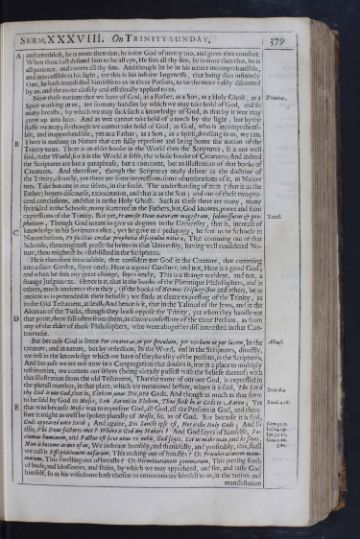 Serm. XXXVIII.
On Trinitysunday.
379
and tremblest, he is more then that, he is the God of mercy too, and gives thee comfort.
Serm. XXXVIII.
On Trinitysunday.
379
and tremblest, he is more then that, he is the God of mercy too, and gives thee comfort.
When thou hast defined him to be all eye, He sees all thy sins, he is more then that, he is
all patience, and covers all thy sins. And though he be in his nature incomprehensible,
and inaccessible in his light, yet this is his infinite largenesse, that being thus infinitely
One, he hath manifested himselfe to us in three Persons, to be the more easily discerned
by us, and the more closely and effectually applied to us.
Now these notions that we have of God, as a Father, as a Son, as a Holy Ghost, Trinitas. as a
Spirit working in us, are so many handles by which we may take hold of God, and so
many breasts, by which we may suck such a knowledge of God, as that by it wee may
grow up into him. And as wee cannot take hold of a torch by the light, but by the
staffe we may; so though we cannot take hold of God, as God, who is incomprehensi-
ble, and inapprehensible, yet as a Father, as a Son, as a Spirit, dwelling in us, we can.
There is nothing in Nature that can fully represent and bring home the notion of the
Trinity to us. There is an elder booke in the World then the Scriptures; It is not well
said, in the World, for it is the World it selfe, the whole booke of Creatures; And indeed
the Scriptures are but a paraphrase, but a comment, but an illustration of that booke of
Creatures. And therefore, though the Scriptures onely deliver us the doctrine of
the Trinity, clearely, yet there are some impressions, some obumbrations of it, in Nature
too. Take but one in our selves, in the soule. The understanding of man (that is as the
Father) begets discourse, ratiocination, and that is as the Son; and out of these two pro-
ceed conclusions, and that is as the Holy Ghost. Such as these there are many, many
sprinkled in the Schoole, many scattered in the Fathers, but, God knowes, poore and faint
expressions of the Trinity. But yet, Præmisit Deus naturam magistram,Tertul. submissurus & pro-
phetiam, Though God meant to give us degrees in the University, that is, increase of
knowledge in his Scriptures after, yet he gave us a pedagogy, he sent us to Schoole in
Nature before; Vt faciliùs credas prophetiæ discipulus naturæ, That comming out of that
Schoole, thou mightest profit the better in that University, having well considered Na-
ture, thou mightest be established in the Scriptures.
He is therefore inexcusable, that considers not God in the Creature, that comming
into a faire Garden, sayes onely, Here is a good Gardiner, and not, Here is a good God;
and when he sees any great change, sayes onely, This is a strange accident, and not, a
strange Judgement. Hence is it, that in the books of the Platonique Philosophers, and in
others, much ancienter then they, (if the books of Hermes Trismegistus and others, be as
ancient as is pretended in their behalfe) we finde as cleare expressing of the Trinity, as
in the Old Testament, at least; And hence is it, that in the Talmud of the Jews, and in the
Alcoran of the Turks, though they both oppose the Trinity, yet when they handle not
that point, there fall often from them, as cleare confessions of the three Persons, as from
any of the elder of those Philosophers, who were altogether dis-interested in that Con-
troversie.
But because God is seene Per creaturas, ut per speculum, per verbum ut per lucem,Aleus. In the
creature, and in nature, but by reflection, In the Word, and in the Scriptures, directly,
we rest in the knowledge which we have of the plurality of the persons, in the Scriptures;
And because we are not now in a Congregation that doubts it, nor in a place to multiply
testimonies, we content our selves (being already possest with the beliefe thereof) with
this illustration from the old Testament, That the name of our one God, is expressed in
the plurall number, in that place, which we mentioned before, where it is said, Deut. 6.4. The Lord
thy God is one God, that is, Elohim, unus Dii, one Gods. And though as much as that seem
to be said by God to Moses, Eris Aaroni in Elohim, Thou shalt be as Gods to Aaron;Exod. 4.16. Yet
that was because Moses was to represent God, all God, all the Persons in God, and there-
fore it might as well be spoken plurally of Moses, so, as of God. But because it is said,
Gods appeared unto Iacob; And againe, Dii Sancti ipse est, Hee is the Holy Gods;Gen. 35.7. And so
also, Vbi Deus factores mei? Where is God my Makers? Ios. 24.19. And God sayes of himselfe, Fa-
ciamus hominem, Iob 35.10. and Factus est sicut unus ex nobis, God sayes, Let us make man, and he sayes,
Man is become as one of us, We imbrace humbly, and thankfully, and profitably, this, shall Gen. 1.26.
we call it Effigiationem ansarum, This making out of handles? Or Gen. 3.22. Protuberationem mam-
marum, This swelling out of breasts? Or Germinationem gemmarum, This putting forth
of buds, and blossomes, and fruits, by which we may apprehend, and see, and taste God
himself, so as his wisedome hath chosen to communicate himself to us, in the notion and manifestation
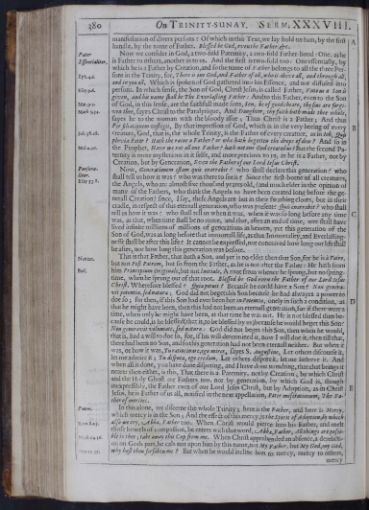 380
On Trinitysunday.
Serm. XXXVIII.
manifestation of divers persons? Of which in this Text, we lay hold on him, by the first
380
On Trinitysunday.
Serm. XXXVIII.
manifestation of divers persons? Of which in this Text, we lay hold on him, by the first
handle, by the name of Father. Blessed be God, even the Father, &c.
Now we consider in God, Pater
Essentialiter. a two-fold Paternity, a two-fold Father-hood: One, as he
is Father to others, another as to us. And the first is two-fold too: One essentially, by
which he is a Father by Creation, and so the name of Father belongs to all the three Per-
sons in the Trinity, Eph. 4.6. for, There is one God, and Father of all, who is above all, and through all,
and in you all, Which is spoken of God gathered into his Essence, and not diffused into
persons.Esay 9.6. In which sense, the Son of God, Christ Jesus, is called Father, Vnto us a Son is
given, and his name shall be The Everlasting Father: And to this Father, even to the Son
of God, Mat. 9.2. in this sense, are the faithfull made sons, Son, be of good cheare, thy sins are forgi-
ven thee,Mark 5.34. sayes Christ to the Paralytique, And Daughter, thy faith hath made thee whole,
sayes he to the woman with the bloody issue; Thus Christ is a Father; And thus
Per filiationem vestigii, By that impression of God, which is in the very beeing of every
creature, Iob 38.28. God, that is, the whole Trinity, is the Father of every creature, as in Iob, Quis
pluviæ Pater? Hath the raine a Father? or who hath begotten the drops of dew? And so in
the Prophet, Mal. 2.10. Have we not all one Father? hath not one God created us? But the second Pa-
ternity is more mysterious in it selfe, and more precious to us, as he is a Father, not by
Creation, but by Generation, Even the Father of our Lord Iesus Christ.
Now, Persona-
liter. Generationem istam quis enarrabit? who shall declare this generation? who
shall tell us how it was? who was there to fee it? Since the first-borne of all creatures,
the Angels, Esay 53.8. who are almost sixe thousand yeares old, (and much elder in the opinion of
many of the Fathers, who think the Angels to have been created long before the ge-
nerall Creation) since, I say, these Angels are but in their swathing clouts, but in their
cradle, in respect of this eternall generation, who was present? Quis enarrabit? who shall
tell us how it was? who shall tell us when it was, when it was so long before any time
was, as that, when time shall be no more, and that, after an end of time, wee shall have
lived infinite millions of millions of generations in heaven, yet this generation of the
Son of God, was as long before that immortall life, as that Immortality, and Everlasting-
nesse shall be after this life? It cannot be expressed, nor conceived how long our life shall
be after, nor how long this generation was before.
This is that Father, Nazian. that hath a Son, and yet is no elder then that Son, for he is à Patre,
but not Post Patrem, but so from the Father, as he is not after the Father: He hath from
him Principium Originale,Biel. but not Initiale, A root from whence he sprung, but no spring-
time, when he sprung out of that root. Blessed be God even the Father of our Lord Iesus
Christ. Wherefore blessed? Quia potuit? Because he could have a Son? Non genera-
vit potentia, sed natura; God did not beget this Son because he had alwayes a power to
doe so; for then, if this Son had ever been but in Potentia, onely in such a condition, as
that he might have been, then this had not been an eternall generation, for if there were a
time, when only he might have been, at that time he was not. He is not blessed then be-
cause cause he could, is he blessed (that is, to be blessed by us) because he would beget this Son?
Non generavit voluntate, sed natura: God did not beget this Son, then when he would,
that is, had a will to doe so, for, if his will determined it, now I will doe it, then till that,
there had been no Son, and so this generation had not been eternall neither. But when it
was, or how it was, Turatiocinare, ego mirer, sayes S. Augustine, Let others discourse it,
let me admire it; Tu disputa, ego credam, Let others dispute it, let me beleeve it. And
when all is done, you have done disputing, and I have done wondring, that that brings it
nearer then either, is this, That there is a Paternity, not by Creation, by which Christ
and the Holy Ghost are Fathers too, nor by generation, by which God is, though
inexpressibly, the Father even of our Lord Jesus Christ, but by Adoption, as in Christ
Jesus, he is Father of us all, notified in the next appellation, Pater miserationum, The Fa-
ther of mercies.
In this alone, Pater. we discerne the whole Trinity; here is the Father, and here is Mercy,
which mercy is in the Son; And the effect of this mercy, is the Spirit of Adoption, by which
also we cry,Rem. 8.15. Abba, Father too. When Christ would pierce into his Father, and melt
those bowels of compassion, he enters with that word, Abba, Father, All things are possi-
ble to thee;Mark 14.36. take away this Cup from me. When Christ apprehended an absence, a derelicti-
on on Gods part, he cals not upon him by this name, not My Father, but My God, my God,
why hast thou forsaken me?Mat. 27.37. But when he would incline him to mercy, mercy to others, mercy
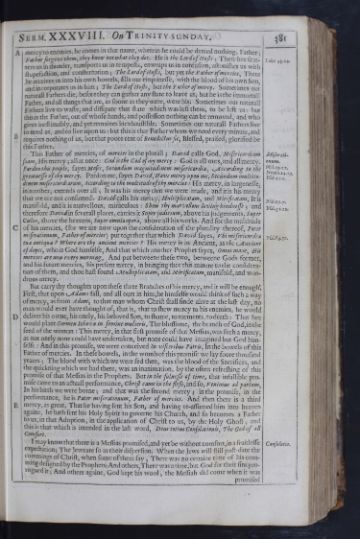 Serm. XXXVIII.
On Trinitysunday.
381
mercy to enemies, he comes in that name, wherein he could be denied nothing, Father;
Serm. XXXVIII.
On Trinitysunday.
381
mercy to enemies, he comes in that name, wherein he could be denied nothing, Father;
Father forgive them, they know not what they doe. He is the Lord of Hosts;Luke 23.24. There hee scat-
ters us in thunder, transports us in tempests, enwraps us in confusion, astonishes us with
stupefaction, and consternation; The Lord of Hosts, but yet the Father of mercies, There
he receives us into his own bowels, fills our emptinesse, with the blood of his own Son,
and incorporates us in him; The Lord of Hosts, but the Father of mercy. Sometimes our
naturall Fathers die, before they can gather any state to leave us, but he is the immortall
Father, and all things that are, as soone as they were, were his. Sometimes our naturall
Fathers live to waste, and dissipate that state which was left them, to be left us: but
this is the Father, out of whose hands, and possession nothing can be removed, and who
gives inestimably, and yet remaines inexhaustible. Sometimes our naturall Fathers live
to need us, and to live upon us: but this is that Father whom we need every minute, and
requires nothing of us, but that poore rent of Benedictus sit, Blessed, praised, glorified be
this Father.
This Father of mercies, of mercies in the plurall; David calls God, Miserati-
onum. Misericordiam
suam, His mercy; all at once: God is the God of my mercy: God is all ours, and all mercy.
Pardon this people, Psal. 59.17. sayes Moses, Secundùm magnitudinem misericordiæ, According to the
greatnesse of thy mercy. Numb. 14.19. Pardon me, sayes David, Have mercy upon me, Secùndum multitu-
dinem misericordiarum, According to the multitude of thy mercies: Psal. 51.1. His mercy, in largenesse,
in number, extends over all; It was his mercy that we were made, and it is his mercy
that we are not consumed. David calls his mercy, Multiplicatam, and Mirificatam,Psal. 17.7. It is
manifold, Psal. 31.22. and it is marvellous, miraculous: Shew thy marvellous loving kindnesse; and
therefore David in severall places, carries it Super judicium, above his judgements, Super
Cæos, above the heavens, Super omnia opera, above all his works. And for the multitude
of his mercies, (for we are now upon the consideration of the plurality thereof, Pater
miserationum, Father of mercies) put together that which David sayes, Psal. 89.50. Vbi misericordiæ
tuæ antiquæ? Where are thy ancient mercies? His mercy is as Ancient, as the Ancient
of dayes, who is God himselfe, And that which another Prophet sayes, Omni mane, His
mercies are new every morning, And put betweene these two, betweene Gods former,
and his future mercies, his present mercy, in bringing thee this minute to the considera-
tion of them, and thou hast found Multiplicatam, and Mirificatam, manifold, and won-
drous mercy.
But carry thy thoughts upon these three Branches of his mercy, and it will be enough.
First, that upon Adams fall, and all ours in him, he himselfe would think of such a way
of mercy, as from Adam, to that man whom Christ shall finde alive at the last day, no
man would ever have thought of, that is, that to shew mercy to his enemies, he would
deliver his owne, his onely, his beloved Son, to shame, to torments, to death: That hee
would plant Germen Iehovæ in semine mulieris, The blossome, the branch of God, in the
seed of the woman: This mercy, in that first promise of that Messias, was such a mercy,
as not onely none could have undertaken, but none could have imagined but God him-
selfe: And in this promise, we were conceived In visceribus Patris, In the bowels of this
Father of mercies. In these bowels, in the womb of this promise we lay foure thousand
yeares; The blood with which we were fed then, was the blood of the Sacrifices, and
the quickning which we had there, was an inanimation, by the often refreshing of this
promise of that Messias in the Prophets. But in the fulnesse of time, that infallible pro-
mise came to an actuall performance, Christ came in the flesh, and so, Venimus ad partum,
In his birth we were borne; and that was the second mercy; in the promise, in the
performance, he is Pater miserationum, Father of mercies. And then there is a third
mercy, as great, That he having sent his Son, and having re-assumed him into heaven
againe, he hath sent his Holy Spirit to governe his Church, and so becomes a Father
to us, in that Adoption, in the application of Christ to us, by the Holy Ghost; and
this as that which is intended in the last word, Deus totius Consolationis, The God of all
Comfort.
I may know that there is a Messias promised, and yet be without comfort, Consolatio. in a fruitlesse
expectation; The Jews are so in their dispersion. When the Jews will still post-date the
commings of Christ, when some of them say, There was no certaine time of his com-
ming designed by the Prophets; And others, There was a time, but God for their sins pro-
rogued it; And others againe, God kept his word, the Messiah did come when it was promised
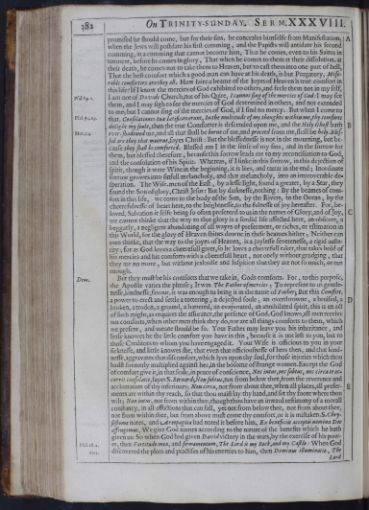 382
On Trinitysunday.
Serm. XXXVIII.
promised he should come, but for their sins, he conceales himselfe from Manifestation;
382
On Trinitysunday.
Serm. XXXVIII.
promised he should come, but for their sins, he conceales himselfe from Manifestation;
when the Jews will postdate his first comming, and the Papists will antidate his second
comming, in a comming that cannot become him, That he comes, even to his Saints in
torment, before he comes in glory, That when he comes to them at their dissolution, at
their death, he comes not to take them to Heaven, but to cast them into one part of hell,
That the best comfort which a good man can have at his death, is but Purgatory, Mise-
rable comforters are they all. How faire a beame of the joyes of Heaven is true comfort in
this life? If I know the mercies of God exhibited to others, and feele them not in my self,
I am not of Davids Church, Psal. 59.1. not of his Quire, I cannot sing of the mercies of God: I may see
them, and I may sigh to see the mercies of God determined in others, and not extended
to me; but I cannot sing of the mercies of God, if I find no mercy. But when I come to
that, Psal. 94.19. Consolationes tuæ lætificaverunt, In the multitude of my thoughts within me, thy comforts
delight my soule, then the true Comforter is descended upon me, and the Holy Ghost hath
over-shadowed me, Mat. 5.4. and all that shall be borne of me, and proceed from me, shall be holy. Bles-
sed are they that mourne, sayes Christ: But the blessednesse is not in the mourning, but be-
cause they shall be comforted. Blessed am I in the sense of my sins, and in the sorrow for
them, but blessed therefore, because this sorrow leads me to my reconciliation to God,
and the consolation of his Spirit. Whereas, if I sinke in this sorrow, in this dejection of
spirit, though it were Wine in the beginning, it is lees, and tartar in the end; Inordinate
sorrow growes into sinfull melancholy, and that melancholy, into an irrecoverable de-
speration. The Wise-men of the East, by a lesse light, found a greater, by a Star, they
found the Son of glory, Christ Jesus: But by darknesse, nothing: By the beames of com-
fort in this life, we come to the body of the Sun, by the Rivers, to the Ocean, by the
cheerefulnesse of heart here, to the brightnesse, to the fulnesse of joy hereafter. For, be-
loved, Salvation it selfe being so often presented to us in the names of Glory, and of Joy,
we cannot thinke that the way to that glory is a sordid life affected here, an obscure, a
beggarly, a negligent abandoning of all wayes of preferment, or riches, or estimation in
this World, for the glory of Heaven shines downe in these beames hither; Neither can
men thinke, that the way to the joyes of Heaven, is a joylesse severenesse, a rigid auste-
rity; for as God loves a cheerefull giver, so he loves a cheerefull taker, that takes hold of
his mercies and his comforts with a cheerefull heart, not onely without grudging, that
they are no more, but without jealousie and suspition that they are not so much, or not
enough.
But they must be his comforts that we take in, Deus. Gods comforts. For, to this purpose,
the Apostle varies the phrase; It was The Father of mercies; To represent to us gentle-
nesse, kindnesse, favour, it was enough to bring it in the name of Father; But this Comfort,
a power to erect and settle a tottering, a dejected soule, an overthrowne, a bruised, a
broken, a troden, a ground, a battered, an evaporated, an annihilated spirit, this is an act
of such might, as requires the assurance, the presence of God. God knows, all men receive
not comforts, when other men think they do, nor are all things comforts to them, which
we present, and meane should be so. Your Father may leave you his inheritance, and
little knowes he the little comfort you have in this, because it is not left to you, but to
those Creditors to whom you have engaged it. Your Wife is officious to you in your
sicknesse, and little knowes she, that even that officiousnesse of hers then, and that kind-
nesse, aggravates that discomfort, which lyes upon thy soul, for those injuries which thou
hadst formerly multiplied against her, in the bosome of strange women. Except the God
of comfort give it, in that seale, in peace of conscience, Nec intus, nec subtus, nec circa te oc-
currit consolatio, sayes S. Bernard; Non subtus, not from below thee, from the reverence and
acclamation of thy inferiours; Non circa, not from about thee, when all places, all prefer-
ments are within thy reach, so that thou maist lay thy hand, and set thy foote where thou
wilt; Non intus, not from within thee, though thou have an inward testimony of a morall
constancy, in all afflictions that can fall, yet not from below thee, not from about thee,
not from within thee, but from above must come thy comfort, or it is mistaken. S. Chry-
sostome notes, and Areopagita had noted it before him, Ex beneficiis acceptis nomina Deo
affingimus, We give God names according to the nature of the benefits which he hath
given us: So when God had given David victory in the wars, by the exercise of his pow-
er, then Fortitudo mea,Psal. 18.2. and firmamentum, The Lord is my Rock, and my Castle: When God
discovered the plots and practises of his enemies to him, then Dominus illuminatio, Psal. 27.1. The Lord
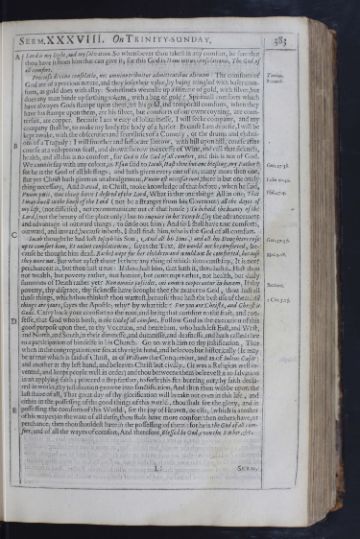 On Trinity-sunday.
Serm. XXXVIII.
383
Lord is my light, and my salvation. So whensoever thou takest in any comfort, be sure that
On Trinity-sunday.
Serm. XXXVIII.
383
Lord is my light, and my salvation. So whensoever thou takest in any comfort, be sure that
thou have it from him that can give it; for this God is Deus totius consolationis, The God of
all comfort.
Preciosa divina consolatio, nec omnino tribuitur admittentibus alienam:Totius. The comforts of
God are of a precious nature, and they lose their value, by being mingled with baser Bernard. com-
forts, as gold does with allay. Sometimes we make up a summe of gold, with silver, but
does any man binde up farthing tokens, with a bag of gold? Spirituall comforts which
have alwayes Gods stampe upon them, are his gold, and temporall comforts, when they
have his stampe upon them, are his silver, but comforts of our owne coyning, are coun-
terfait, are copper. Because I am weary of solitarinesse, I will seeke company, and my
company shall be, to make my body the body of a harlot: Because I am drousie, I will be
kept awake, with the obscenities and scurrilities of a Comedy, or the drums and ejulati-
ons of a Tragedy: I will smother and suffocate sorrow, with hill upon hill, course after
course at a voluptuous feast, and drown sorrow in excesse of Wine, and call that sickness,
health; and all this is no comfort, for God is the God of all comfort, and this is not of God.
We cannot say with any colour, as Esau said to Iacob, Hast thou but one blessing, my Father?
Gen. 17.38. for he is the God of all blessings, and hath given every one of us, many more then one.
But yet Christ hath given us an abridgement, Vnum est necessarium, Luke 10.42. there is but one onely
thing necessary, And David, in Christ, tooke knowledge of that before, when he said,
Vnum petii, One thing have I desired of the Lord, What is that one thing? All in one;Psal. 27.4. That
I may dwell in the house efof the Lord (not be a stranger from his Covenant) all the dayes of
my life, (not disseised, not excommunicate out of that house) To behold the beauty of the
Lord, (not the beauty of the place only) but to inquire in his Temple, (by the advancement
and advantage of outward things, to finde out him) And so I shall have true comforts,
outward, and inward, because in both, I shall finde him, who is the God of all comfort.
Iacob thought he had lost Ioseph his Son, And all his Sons, Gen. 37.35. and all his Daughters rose
up to comfort him, Et noluit consolationem, sayes the Text, He would not be comforted, be-
cause he thought him dead. Rachel wept for her children and would not be comforted, Mat. 2.18. because
they were not. But what aylest thou? Is there any thing of which thou canst say, It is not?
perchance it is, but thou hast it not: If thou hast him, that hath it, thou hast it. Hast thou
not wealth, but poverty rather, not honour, but contempt rather, not health, but daily
summons of Death rather yet? Non omnia possidet, cui omnia cooperantur in bonum, Bernard. If thy
poverty, thy disgrace, thy sicknesse have brought thee the nearer to God, thou hast all
those things, which thou thinkest thou wantest, because thou hast the best use of them.1 Cor. 3.23. All
things are yours, sayes the Apostle; why? by what title? For you are Christs, and Christ is
Gods. Carry back your comfort to the root, and bring that comfort to the fruit, and con-
fesse, that God who is both, is the God of all comfort. Follow God in the execution of this
good purpose upon thee, to thy Vocation, and heare him, who hath left East, and West,
and North, and South, in their dimnesse, and dumnesse, and deafnesse, and hath called thee
to a participation of himselfe in his Church. Go on with him to thy justification, That
when in the congregation one sits at thy right hand, and beleeves but historically (It may
be as true which is said of Christ, as of William the Conquerour, and as of Iulius Cæsar)
and another at thy left hand, and beleeves Christ but civilly, (It was a Religion well in-
vented, and keeps people well in order) and thou betweene them beleevest it to salvation
in an applying faith; proceed a step farther, to feele this fire burning out, thy faith decla-
red in works, thy justification growne into sanctification, And then thou wilt be upon the
last staire of all, That great day of thy glorification will breake out even in this life, and
either in the possessing of the good things of this world, thou shalt see the glory, and in
possessing the comforts of this World, see the joy of Heaven, or else, (which is another
of his wayes) in the want of all these, thou shalt have more comfort then others have, or
perchance, then thou shouldest have in the possessing of them: for he is the God of all com-
fort, and of all the wayes of comfort; And therefore, Blessed be God, even the Father, &c. Ll Serm.
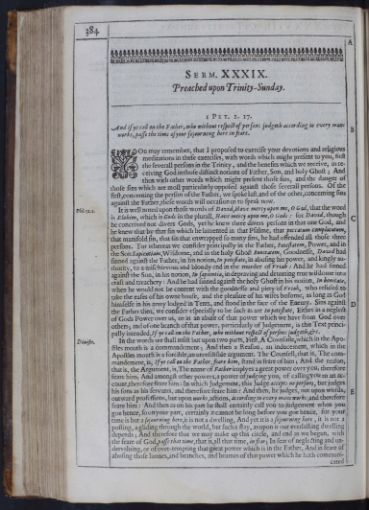 384
384
SERM. XXXIX.
Preached upon Trinity-Sunday.
1 PET. 1.17.
And if ye call on the Father, who without respect of persons judgeth according to every mans
works, passe the time of your sojourning here in feare.
YOuYou may remember, that I proposed to exercise your devotions and religious
meditations in these exercises, with words which might present to you, first
the severall persons in the Trinity, and the benefits which we receive, in re-
ceiving God in those distinct notions of Father, Son, and holy Ghost; And
then with other words which might present those sins, and the danger of
those sins which are most particularly opposed against those severall persons. Of the
first, concerning the person of the Father, we spoke last, and of the other, concerning sins
against the Father, these words will occasion us to speak now.
It is well noted upon those words of David,Psal. 51.1. Have mercy upon me, O God, that the word
is Elohim, which is Gods in the plurall, Have mercy upon me, O Gods: for David, though
he conceived not divers Gods, yet he knew three divers persons in that one God, and
he knew that by that sin which he lamented in that Psalme, that peccatum complicatum,
that manifold sin, that sin that enwrapped so many sins, he had offended all those three
persons. For whereas we consider principally in the Father, Potestatem, Power, and in
the Son Sapientiam, Wisdome, and in the holy Ghost Bonitatem, Goodnesse, David had
sinned against the Father, in his notion, In potestate, in abusing his power, and kingly au-
thority, to a mischievous and bloody end in the murder of Vriah: And he had sinned
against the Son, in his notion, In sapientia, in depraving and detorting true wisdome into
craft and treachery: And he had sinned against the holy Ghost in his notion, In bonitate,
when he would not be content with the goodnesse and piety of Vriah, who refused to
take the eases of his owne house, and the pleasure of his wifes bosome, as long as God
himselfe in his army lodged in Tents, and stood in the face of the Enemy. Sins against
the Father then, we consider especially to be such as are In potestate, Either in a neglect
of Gods Power over us, or in an abuse of that power which we have from God over
others; and of one branch of that power, particularly of Judgement, is this Text princi-
pally intended, If ye call on the Father, who without respect of persons judgeth, &c.
In the words we shall insist but upon two parts, Divisio. First, A Counsaile, which in the Apo-
stles mouth is a commandement; And then a Reason, an inducement, which in the
Apostles mouth is a forcible, an unresistible argument. The Counsell, that is, The com-
mandement, is, If ye call on the Father, feare him, stand in feare of him; And the reason,
that is, the Argument, is, The name of Father implyes a great power over you, therefore
feare him; And amongst other powers, a power of judging you, of calling you to an ac-
count, therefore feare him: In which Judgement, this Judge accepts no persons, but judges
his sons as his servants, and therefore feare him: And then, he judges, not upon words,
outward professions, but upon works, actions, according to every mans works, and therefore
feare him: And then as on his part he shall certainly call you to judgement when you
goe hence, so on your part, certainly it cannot be long before you goe hence, for your
time is but a sojourning here, it is not a dwelling, And yet it is a sojourning here, it is not a
posting, a gliding through the world, but such a stay, as upon it our everlasting dwelling
depends; And therefore that we may make up this circle, and end as we begun, with
the feare of God, passe that time, that is, all that time, in fear; In fear of neglecting and un-
dervaluing, or of over-tempting that great power which is in the Father, And in feare of
abusing those limnes, and branches, and beames of that power which he hath communi-
cated
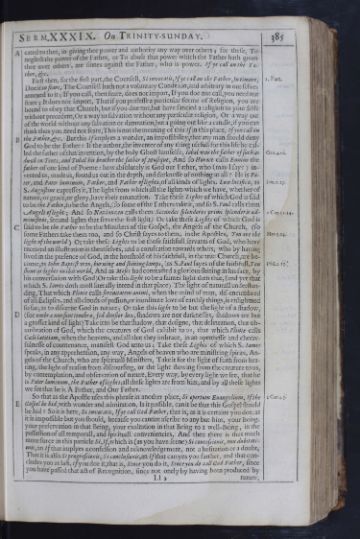 On Trinity-sunday.
Serm. XXXIX.
385
cated to thee, in giving thee power and authority any way over others; for these, To
On Trinity-sunday.
Serm. XXXIX.
385
cated to thee, in giving thee power and authority any way over others; for these, To
neglect the power of the Father, or To abuse that power which the Father hath given
thee over others, are sinnes against the Father, who is power. If ye call on the Fa-
ther, &c.
First then, for the first part, the Counsell, Si invocatis, If ye call on the Father, In timore,
1. Part. Doe it in feare, The Counsell hath not a voluntary Condition, and arbitrary in our selves
annexed to it; If you call, then feare, does not import, If you doe not call, you need not
feare; It does not import, That if you professe a particular forme of Religion, you are
bound to obey that Church, but if you doe not, but have fancied a religion to your selfe
without precedent, Or a way to salvation without any particular religion, Or a way out
of the world without any salvation or damnation, but a going out like a candle, if you can
think thus you need not feare, This is not the meaning of this If in this place, If you call on
the Father, &c. But this If implyes a wonder, an impossibility, that any man should deny
God to be the Father: If the author, the inventer of any thing usefull for this life be cal-
led the father of that invention, by the holy Ghost himselfe, Gen. 4.20. Iabal was the father of such as
dwell in Tents, and Tubal his brother the father of Musique, And so Horace calls Ennius the
father of one kind of Poeme: how absolutely is God our Father, who (may I say?) in-
vented us, made us, found us out in the depth, and darknesse of nothing at all? He is Pa-
ter, and Pater luminum, Father, and Father of lights, of all kinds of lights. Lux lucifica,Iam. 1.17. as
S. Augustine expresses it, The light from which all the lights which we have, whether of
nature, or grace, or glory, have their emanation. Take these Lights of which God is said
to be the Father, to be the Angels, (so some of the Fathers take it, and so S. Paul calls them
Angels of light; And so Nazianzen calls them Secundos splendores primi splendoris ad-
ministros,2 Cor. 11.14. second lights that serve the first light) Or take these Lights of which God is
said to be the Father to be the Ministers of the Gospel, the Angels of the Church, (so
some Fathers take them too, and so Christ sayes to them, in the Apostles, Mat. 5.14. You are the
light of the world) Or take these Lights to be those faithfull servants of God, who have
received an illustration in themselves, and a coruscation towards others, who by having
lived in the presence of God, in the houshold of his faithfull, in the true Church, are be-
come, as Iohn Baptist was, burning and shining lamps, (as S. Paul sayes of the faithfull, Phil. 2.15. You
shine as lights in this world, And as Moses had contracted a glorious shining in his face, by
his conversation with God) Or take this light to be a fainter light then that, (and yet that
which S. Iames doth most literally intend in that place) The light of naturall understan-
ding, That which Plinie calls serenitatem animi, when the mind of man, dis-encumbred
of all Eclipses, and all clouds of passion, or inordinate love of earthly things, is enlightned
so far, as to discerne God in nature; Or take this light to be but the light of a shadow,
(for umbræ non sunt tenebræ, sed densior lux, shadows are not darknesses, shadows are but
a grosser kind of light) Take it to be that shadow, that designe, that delineation, that ob-
umbration of God, which the creatures of God exhibit to us, that which Plinie calls
Cæilætitiam, when the heavens, and all that they imbrace, in an opennesse and cheere-
fulnesse of countenance, manifest God unto us; Take these Lights of which S. Iames
speaks, in any apprehension, any way, Angels of heaven who are ministring spirits, An-
gels of the Church, who are spirituall Ministers, Take it for the light of faith from hea-
ring, the light of reason from discoursing, or the light flowing from the creature to us,
by contemplation, and observation of nature, Every way, by every light we see, that he
is Pater luminum, the Father of lights; all these lights are from him, and by all these lights
we see that he is A Father, and Our Father.
So that as the Apostle uses this phrase in another place, Si opertum Euangelium,2 Cor. 4.3. If the
Gospel be hid, with wonder and admiration, Is it possible, can it be that this Gospel should
be hid? So it is here, Si invocatis, If ye call God Father, that is, as it is certaine you doe, as
it is impossible but you should, because you cannot ascribe to any but him, your Being,
your preservation in that Being, your exaltation in that Being to a well-Being, in the
possession of all temporall, and spirituall conveniencies, And then there is thus much
more force in this particle Si, If, which is (as you have seene) Si concessionis, non dubitati-
onis, an If that implyes a confession and acknowledgement, not a hesitation or a doubt,
That it is also Si progressionis, Si conclusionis, an If that carryes you farther, and that con-
cludes you at last, If you doe it, that is, Since you do it, Since you do call God Father, since
you have passed that act of Recognition, since not onely by having been produced by Ll2 nature,
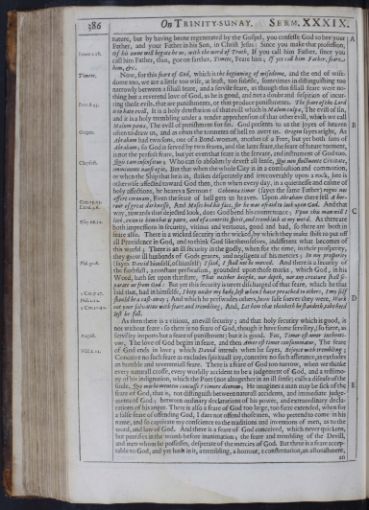 386
On Trinity-sunaysunday.
Serm. XXXIX.
nature, but by having beene regenerated by the Gospel, you confesse God to bee your
386
On Trinity-sunaysunday.
Serm. XXXIX.
nature, but by having beene regenerated by the Gospel, you confesse God to bee your
Father, and your Father in his Son, in Christ Jesus: Since you make that profession,
Of his owne will begate he us,Iames 1.18. with the word of Truth, If you call him Father, since you
call him Father, thus, goe on farther, Timete, Feare him; If yee call him Father, feare
him, &c.
Now, Timete. for this feare of God, which is the beginning of wisedome, and the end of wise-
dome too, we are a little too wise, at least, too subtile, sometimes in distinguishing too
narrowly between a filiall feare, and a servile feare, as though this filiall feare were no-
thing but a reverend love of God, as he is good, and not a doubt and suspition of incur-
ring those evils, Prov. 8.13. that are punishments, or that produce punishments. The feare of the Lord
is to hate evill, It is a holy detestation of that evill which is Malum culpæ, The evill of sin,
and it is a holy trembling under a tender apprehension of that other evill, which we call
Malum pœnæ, The evill of punishment for sin. God presents to us the joyes of heaven
often to draw us, Origen. and as often the torments of hell to avert us. Origen sayes aright, As
Abraham had two sons, one of a Bond-woman, another of a Free, but yet both sons of
Abraham; so God is served by two feares, and the later feare, the feare of future torment,
is not the perfect feare, but yet even that feare is the servant, and instrument of God too.
Quis tam insensatus;Chrysost. Who can so absolutely devest all sense, Qui non fluctuante Civitate,
imminente naufragio, But that when the whole City is in a combustion and commotion,
or when the Ship that he is in, strikes desperately and irrecoverably upon a rock, hee is
otherwise affected toward God then, then when every day, in a quietnesse and calme of
holy affections, he heares a Sermon? Gehennæ timor (sayes the same Father) regni nos
affert coronam,Gen. 15.12. Even the feare of hell gets us heaven. Upon Abraham there fell A hor-
rour of great darknesse,Exod. 3.6. And Moses hid his face, for he was afraid to look upon God. And that
way, towards that dejected look, does God bend his countenance; Vpon this man will I
look,Esay 66.12. even to him that is poore, and of a contrite spirit, and trembleth at my word. As there are
both impressions in security, vitious and vertuous, good and bad, so there are both in
feare also. There is a wicked security in the wicked, by which they make shift to put off
all Providence in God, and to think God like themselves, indifferent what becomes of
this world; There is an ill security in the godly, when for the time, in their prosperity,
they grow ill husbands of Gods graces, and negligent of his mercies; In my prosperity
(sayes David himself, Psal. 30.6. of himself) I said, I shall not be moved. And there is a security of
the faithfull, a constant perswasion, grounded upon those marks, which God, in his
Word, hath set upon that state, That neither height, nor depth, nor any creature shall se-
parate us from God: But yet this security is never discharged of that feare, which he that
said that, 1 Cor. 9.27. had in himselfe, I keep under my body, lest when I have preached to others, I my self
should be a cast-away; Phil. 2.12 And which he perswades others, how safe soever they were, Work
out your salvation with feare and trembling, 1 Cor. 10.12. And, Let him that thinketh he standeth, take heed
lest he fall.
As then there is a vitious, an evill security; and that holy security which is good, is
not without feare: so there is no feare of God, though it have some servility, (so farre, as
servility imports but a feare of punishment) but it is good.August. For, Timor est amor inchoati-
vus, The love of God begins in feare, and then Amor est timor consummatus, The feare
of God ends in love;Psal. 2.11. which David intends when he sayes, Rejoyce with trembling;
Conceive no such feare as excludes spirituall joy, conceive no such assurance, as excludes
an humble and reverentiall feare. There is feare of God too narrow, when we thinke
every naturall crosse, every worldly accident to be a judgement of God, and a testimo-
ny of his indignation, which the Poet (not altogether in an ill sense) calls a disease of the
soule, Quo morbo mentem concusse? timore deorum; He imagines a man may be sick of the
feare of God, that is, not distinguish between naturall accidents, and immediate judge-
ments of God; between ordinary declarations of his power, and extraordinary decla-
rations of his anger. There is also a feare of God too large, too farre extended, when for
a false feare of offending God, I dare not offend those men, who pretend to come in his
name, and so captivate my conscience to the traditions and inventions of men, as to the
word, and law of God. And there is a feare of God conceived, which never quickens,
but putrifies in the womb before inanimation; the feare and trembling of the Devill,
and men whom he possesses, desperate of the mercies of God. But there is a feare accep-
table to God, and yet hath in it, a trembling, a horrour, a consternation, an astonishment, an
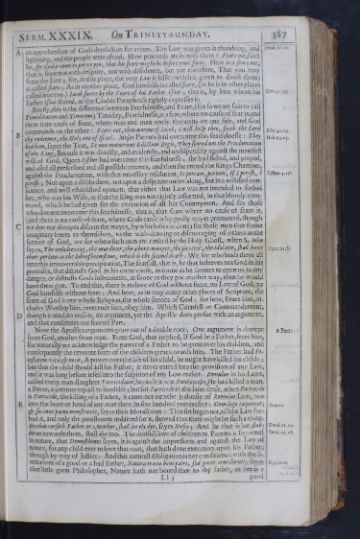 Serm. XXXIX.
On Trinitysunday.
387
an apprehension of Gods dereliction for a time. The Law was given in thundring, Exod. 20.20. and
Serm. XXXIX.
On Trinitysunday.
387
an apprehension of Gods dereliction for a time. The Law was given in thundring, Exod. 20.20. and
lightning, and the people were afraid. How proceeds Moses with them? Feare not, saies
he, for God is come to prove you, that his feare might be before your faces. Here is a feare not,
that is, feare not with despaire, nor with diffidence, but yet therefore, That you may
feare the Law; for, in this place, the very Law it selfe (which is given to direct them)
is called feare; As in another place, God himselfe is called feare, (as he is in other places
called love too) Iacob swore by the Feare of his Father Isaac; that is, Gen. 31.53. by him whom his
Father Isaac feared, as the Chalde Paraphrase rightly expresses it.
Briefly, this is the difference between Fearfulnesse, and Feare, (for sowe are fain to call
Timiditatem and Timorem) Timidity, Fearfulnesse, is a fear, where no cause of fear is; and
there is no cause of feare, where man and man onely threatens on one side, and God
commands on the other: Feare not, thou worme of Iacob, I will help thee,Esay 41.14. saith the Lord
thy redeemer, the Holy one of Israel. Moses Heb. 11.23. Parents had overcome this fearfulnesse: They
hid him, sayes the Text, Et non metucrunt Edictum Regis, They feared not the Proclamation
of the King, Because it was directly, and evidently, and undisputably against the manifest
will of God. Queen Esther had overcome this fearfulnesse; she had fasted, and prayed,
and used all prescribed and all possible meanes, and then she entred the Kings Chamber,
against the Proclamation, with that necessary resolution, Si peream, peream,If I perish, Esther 4.16. I
perish; Not upon a disobedient, not upon a desperate undertaking, but in a rectified con-
science, and well established opinion, that either that Law was not intended to forbid
her, who was his Wife, or that the King was not rightly informed, in that bloody com-
mand, which he had given for the execution of all her Countrymen. And for those
who doe not overcome this fearfulnesse, that is, that feare where no cause of feare is,
(and there is no cause of feare, where Gods cause is by godly wayes promoved, though
we doe not alwayes discern the wayes, by which this is done) for those men that frame
imaginary feares to themselves, to the with-drawing or discouraging of other in the
service of God, we see where such men are ranked by the Holy Ghost, when S. Iohn
sayes, The unbeleeving, the murderer, the whore-monger, the sorcerer, the idolater,Apoc. 21.8. shall have
their portion in the lake of brimstone, which is the second death: We fee who leads them all
into this irrecoverable precipitation, The fearfull, that is, he that beleeves not God in his
promises, that distrusts God in his owne cause, as soone as he seemes to open us to any
danger; or distrusts Gods instruments, as soone as they goe another way, then he would
have them goe. To end this, there is no love of God without feare, no Law of God, no
God himselfe without feare; And here, as in very many other places of Scripture, the
feare of God is our whole Religion, the whole service of God; for here, Feare him, in-
cludes Worship him, reverence him, obey him. Which Counsell or Commandement,
though it need no reason, no argument, yet the Apostle does pursue with an argument,
and that constitutes our second Part.
Now the Apostles arguments grow out of a double root;2 Part. One argument is drawne
from God, another from man. From God, thus implied, If God be a Father, feare him,
for naturally we acknowledge the power of a Father to be great over his children, and
consequently the reverent feare of the children great towards him. The Father had Po-
testatem vitæ & necis, A power over the life of his child, he might have killed his childe;
but that the child should kill his Father, it never entred into the provision of any Law,
and it was long before it fell into the suspition of any Law-maker. Romulus in his Laws,
called every man-slaughter Parricidium, because it was Paris occisio, He had killed a man,
a Peere, a creature equall to himselfe; but for Parricide in the later sense, when Parricide
is Patricide, the killing of a Father, it came not into the jealousie of Romulus Law, nor
into the heart or hand of any man there, in sixe hundred yeares after: Cum lege cœperunt,
Seneca. & facinus pœna monstravit, sayes their Morall man: That sin began not, till the Law for-
bad it, and only the punishment ordained for it, shewed that there might be such a thing.
He that curseth Father or Mother, shall surely dye, sayes Moses;Exod. 21.17. And he that is but stub-
borne towards them, shall dye too. The dutifull love of children to Parents is so rooted Deut. 21.18.
in nature, that Demosthenes sayes, it is against the impressions and against the Law of
nature, for any child ever to love that man, that hath done execution upon his Father,
though by way of Justice: And this naturall Obligation is not conditioned with the li-
mitations of a good or a bad Father, Natura te non bono patri, sed patri conciliavit,Epictetus. sayes
that little great Philosopher, Nature hath not bound thee to thy father, as hee is a Ll3 good
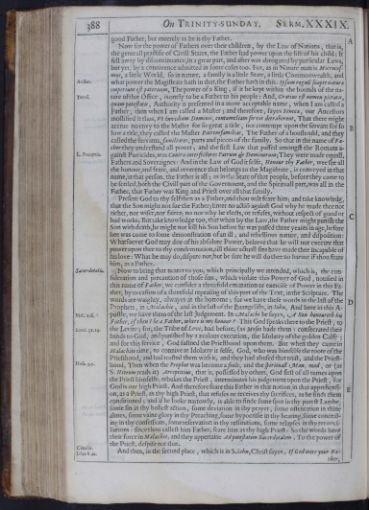 388
On Trinitysunday.
Serm. XXXIX.
good Father, but meerely as he is thy Father.
388
On Trinitysunday.
Serm. XXXIX.
good Father, but meerely as he is thy Father.
Now for the power of Fathers over their children, by the Law of Nations, that is,
the generall practise of Civill States, the Father had power upon the life of his child; It
fell away by discontinuance, in a great part, and after was abrogated by particular Laws,
but yet, by a connivence admitted in some cases too. For, as in Nature man is Microcos-
mus, a little World, so in nature, a family is a little State, a little Commonwealth, and
what power the Magistrate hath in that, Aristor. the Father hath in this. Ipsum regnū suaptenatura
imperium est paternum, The power of a King, if it be kept within the bounds of the na-
ture of that Office, Tertul. is onely to be a Father to his people: And, Gratius est nomen pietatis,
quam potestatis, Authority is presented in a more acceptable name, when I am called a
Father, then when I am called a Master; and therefore, sayes Seneca, our Ancestors
mollified it thus, Vt invidiam Dominis, contumcliam servis detraherent, That there might
accrue no envy to the Master for so great a title, nor contempt upon the servant for so
low a title, they called the Master Patremfamilias, The Father of a houshould, and they
called the servants, familiares, parts and pieces of the family. So that in the name of Fa-
ther they understand all power; and the first Law that passed amongst the Romans a-
gainst Parricides, L. Pompeia. was Contra interfectores Patrum & Dominorum; They were made equall,
Fathers and Soveraignes: And in the Law of God it selfe, Honour thy Father, wee see all
the honour, and feare, and reverence that belongs to the Magistrate, is conveyed in that
name, in that person, the Father is all; as in the State of that people, before they came to
be settled, both the Civill part of the Government, and the Spirituall part, was all in the
Father, that Father was King and Priest over all that family.
Present God to thy self then as a Father, and thou wilt feare him; and take knowledg,
that the Son might not sue the Father; Enter no actiō against God why he made thee not
richer, nor wiser, nor fairer; no nor why he elects, or refuses, without respect of good or
bad works; But take knowledge too, that when by the Law, the Father might punish the
Son with death, he might not kill his Son before he was passed three yeares in age, before
hee was come to some demonstration of an ill, and rebellious nature, and disposition:
Whatsoever God may doe of his absolute Power, beleeve that he will not execute that
power upon thee to thy condemnation, till thine actuall sins have made thee incapable of
his love: What he may do, dispute not, but be sure he will do thee no harme if thou feare
him, as a Father.
Now to bring that nearer to you, Sacerdotalis. which principally we intended, which is, the con-
sideration and precaution of those sins, which violate this Power of God, notified in
this name of Father, we consider a threefold emanation or exercise of Power in this Fa-
ther, by occasion of a threefold repeating of this part of the Text, in the Scripture. The
words are waighty, alwayes at the bottome; for we have these words in the last of the
Prophets, in Malachie, and in the last of the Euangelists, in Iohn, And here in this A-
postle, we have them of the last Judgement.Mal. 1.6. In Malachi he sayes, A Son honoureth his
Father, if then I be a Father, where is my honour? This God speaks there to the Priest, to
the Levite;Exod. 32.29. for, the Tribe of Levi, had before, (as Moses bade them) consecrated their
hands to God, and punished by a zealous execution, the Idolatry of the golden Calfe;
and for this service, God fastned the Priesthood upon them. But when they came in
Malachies time, to connive at Idolatry it selfe, God, who was himselfe the roote of the
Priesthood, and had trusted them with it, and they had abused that trust, and the Priest-
hood, Then when the Prophet was become a foole,Hose. 9.7. and the spirituall Man, mad, or (as
S. Hierom reads it) Arreptitius, that is, possessed by others, God first of all turnes upon
the Priest himselfe, rebukes the Priest, interminates his judgement upon the Priest, for
God is our high Priest. And therefore feare this Father in that notion, in that apprehensi-
on, as a Priest, as thy high Priest, that refuses or receives thy sacrifices, as he finds them
conditioned; and if he looke narrowly, is able to finde some spot in thy purest Lambe,
some sin in thy holiest action, some deviation in thy prayer, some ostentation in thine
almes, some vaine glory in thy Preaching, some hypocrisie in thy hearing, some conceal-
ing in thy confessions, some reservation in thy restitutions, some relapses in thy reconci-
liations: since thou callest him Father, feare him as thy high Priest: So the words have
their force in Malachie, and they appertaine Ad potestatem Sacerdotalem, To the power of
the Priest, despise not that.
And then, Civilis.
Iohn 8.42. in the second place, which is in S. Iohn, Christ sayes, If God were your Fa-
ther,
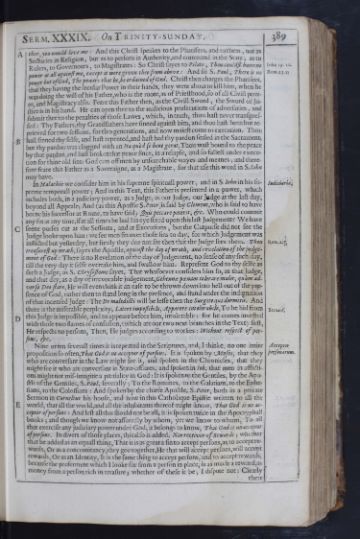 Serm. XXXIX.
On Trinitysunday.
389
ther, you would love me: And this Christ speakes to the Pharisees, and to them, not as
Serm. XXXIX.
On Trinitysunday.
389
ther, you would love me: And this Christ speakes to the Pharisees, and to them, not as
Sectaries in Religion, but as to persons in Authority, and command in the State, as to
Rulers, to Governours, to Magistrates: So Christ sayes to Pilate,Iohn 19.11. Thou couldst have no
power at all against me, except it were given thee from above: And so S. Rom. 13.11. Paul, There is no
power but of God, The powers that be, be ordained of God. Christ then charges the Pharisees,
that they having the secular Power in their hands, they went about to kill him, when he
was doing the will of his Father, who is the roote, as of Priesthood, so of all Civill pow-
er, and Magistracy also. Feare this Father then, as the Civill Sword, the Sword of Ju-
stice is in his hand. He can open thee to the malicious prosecutions of adversaries, and
submit thee to the penalties of those Lawes, which, in truth, thou hast never transgres-
sed: Thy Fathers, thy Grandfathers have sinned against him, and thou hast been but re-
prieved for two sessions, for two generations, and now maiest come to execution. Thou
hast sinned thy selfe, and hast repented, and hast had thy pardon sealed in the Sacrament;
but thy pardon was clogged with an Ita quòd se bene gerat, Thou wast bound to the peace
by that pardon, and hast broken that peace since, in a relapse, and so fallest under execu-
tion for thine old sins: God cuts off men by unsearchable wayes and meanes; and there-
fore feare this Father as a Soveraigne, as a Magistrate, for that use this word in S. Iohn
may have.
In Malachie we consider him in his supreme spirituall power, Iudiciaria. and in S. Iohn in his su-
preme temporall power; And in this Text, this Father is presented in a power, which
includes both, in a judiciary power, as a Judge, as our Judge, our Judge at the last day,
beyond all Appeale; And (as this Apostle S. Peter, is said by Clement, who is said to have
beene his successor at Rome, to have said) Quis peccare poterit, &c. Who could commit
any sin at any time, if at all times he had his eye fixed upon this last Judgement? We have
seene purses cut at the Sessions, and at Executions, but the Cutpurse did not see the
Judge looke upon him: we see men sin over those sins to day, for which Judgement was
inflicted but yesterday, but surely they doe not see then that the Judge sees them.Rom. 2.5. Thou
treasurest up wrath, sayes the Apostle, against the day of wrath, and revelation of the judge-
ment of God: There is no Revelation of the day of Judgement, no sense of any such day,
till the very day it selfe overtake him, and swallow him. Represent God to thy selfe as
such a Judge, as S. Chrysostome sayes, That whosoever considers him so, as that Judge,
and that day, as a day of irrevocable judgement, Gehennæ pœnam tolerare malit, quàm ad-
verso Deo stare, He will even think it an ease to be thrown down into hell out of the pre-
sence of God, rather then to stand long in the presence, and stand under the indignation
of that incensed Judge: The Ite maledicti will be lesse then the Surgite qui dormitis. And
there is the miserable perplexity, Latere impossibils, Apparere intolerabile,Bernard. To be hid from
this Judge is impossible, and to appeare before him, intolerable: for he comes invested
with those two flames of confusion, (which are our two next branches in the Text) first,
He respects no persons, Then, He judges according to workes: Without respect of per-
sons, &c.
Nine or ten severall times it is repeated in the Scriptures, and, I thinke, Acceptor
personarum. no one intire
proposition so often, That God is no accepter of persons. It is spoken by Moses, that they
who are conversant in the Law might see it, and spoken in the Chronicles, that they
might see it who are conversant in State-affaires, and spoken in Iob, that men in afflicti-
ons might not mis-imagine a partiality in God: It is spoken to the Gentiles, by the Apo-
stle of the Gentiles, S. Paul, severally; To the Romanes, to the Galatians, to the Ephe-
sians, to the Colossians: And spoken by the chiefe Apostle, S. Peter, both in a private
Sermon in Cornelius his house, and now in this Catholique Epistle written to all the
world, that all the world, and all the inhabitants thereof might know, That God is no ac-
cepter of persons: And lest all this should not be all, it is spoken twice in the Apocryphall
books; and though we know not assuredly by whom, yet we know to whom, To all
that exercise any judiciary power under God, it belongs to know, That God is no accepter
of persons. In divers of those places, this also is added, Nor receiver of Rewards; whether
that be added as an equall thing, That it is as great a sin to accept persons, as to accept re-
wards, Or as a concomitancy, they goe together, He that will accept persons, will accept
rewards, Or as an Identity, It is the same thing to accept persons, and to accept rewards,
because the preferment which I looke for from a person in place, is as much a reward, as
money from a person rich in treasure; whether of these it be, I dispute not: Clearly there
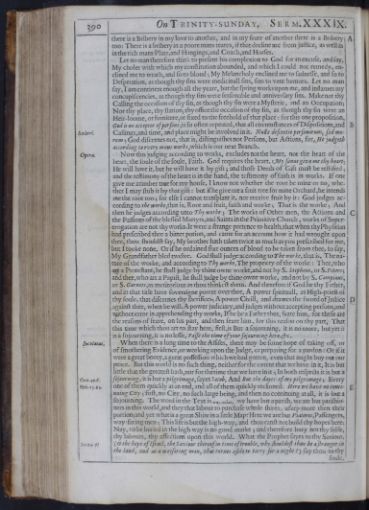 390
On Trinitysunday.
Serm. XXXIX.
there is a Bribery in my love to another, and in my feare of another there is a Bribery
390
On Trinitysunday.
Serm. XXXIX.
there is a Bribery in my love to another, and in my feare of another there is a Bribery
too: There is a bribery in a poore mans teares, if that decline me from justice, as well as
in the rich mans Plate, and Hangings, and Coach, and Horses.
Let no man therefore think to present his complexion to God for an excuse, and say,
My choler with which my constitution abounded, and which I could not remedy, en-
clined me to wrath, and so to bloud; My Melancholy enclined me to sadnesse, and so to
Desperation, as though thy sins were medicinall sins, sins to vent humors. Let no man
say, I am continent enough all the yeare, but the spring works upon me, and inflames my
concupiscencies, as though thy sins were seasonable and anniversary sins. Make not thy
Calling the occasion of thy sin, as though thy sin were a Mysterie, and an Occupation;
Nor thy place, thy station, thy office the occasion of thy sin, as though thy sin were an
Heir-loome, or furniture, or fixed to the freehold of that place: for this one proposition,
God is no accepter of persons, is so often repeated, that all circumstances of Dispositions, and
Callings, Ambros. and time, and place might be involved in it. Nulla descretio personarum, sed mo-
rum; God discernes not, that is, distinguishes not Persons, but Actions, for, He judgeth
according to every mans works, which is our next Branch.
Now this judging according to works, Opera. excludes not the heart, nor the heart of the
heart, the soule of the soule, Faith. God requires the heart, My sonne give me thy heart;
He will have it, but he will have it by gift; and those Deeds of Gift must be testified;
and the testimony of the heart is in the hand, the testimony of faith is in works. If one
give me a timber tree for my house, I know not whether the root be mine or no, whe-
ther I may stub it by that gift: but if he give me a fruit tree for mine Orchard, he intends
me the root too; for else I cannot transplant it, nor receive fruit by it: God judges ac-
cording to the worke, that is, Root and fruit, faith and worke; That is the worke; And
then he judges according unto Thy worke; The works of Other men, the Actions and
the Passions of the blessed Martyrs, and Saints in the Primitive Church, works of Super-
erogation are not thy works. It were a strange pretence to health, that when thy Physitian
had prescribed thee a bitter potion, and came for an account how it had wrought upon
thee, thou shouldst say, My brother hath taken twice as much as you prescribed for me,
but I tooke none, Or if he ordained sixe ounces of bloud to be taken from thee, to say,
My Grandfather bled twelve. God shall judge according to The worke, that is, The na-
ture of the worke, and according to Thy worke, The propriety of the worke: Thee, who
art a Protestant, he shall judge by thine owne worke, and not by S. Stephens, or S. Peters;
and thee, who art a Papist, he shall judge by thine owne worke, and not by S. Campians,
or S. Garnets, as meritorious as thou thinkest them. And therefore if God be thy Father,
and in that title have soveraigne power over thee, A power spirituall, as High-priest of
thy soule, that discernes thy sacrifices; A power Civill, and drawes the sword of Justice
against thee, when he will; A power judiciary, and judges without accepting persons, and
without error in apprehending thy works, If he be a Father thus, feare him, for these are
the reasons of feare, on his part, and then feare him, for this reason on thy part, That
this time which thou art to stay here, first, is But a sojourning, it is no more, but yet it
is a sojourning, it is no lesse, Passe the time of your sojourning here, &c.
When there is a long time to the Assises, Incolatus. there may be some hope of taking off, or
of smothering Evidence, or working upon the Judge, or preparing for a pardon: Or if it
were a great booty, a great possession which we had gotten, even that might buy out our
peace. But this world is no such thing, neither for the extent that we have in it, It is but
little that the greatest hath, nor for the time that we have in it; In both respects it is but a
sojourning,Gen. 47.6. it is but a pilgrimage, sayes Iacob, And But the dayes of my pilgrimage; Every
one of them quickly at an end, and all of them quickly reckoned. Heb. 13.14. Here we have no conti-
nuing City; first, no City, no such large being, and then no continuing at all, it is but a
sojourning. The word in the Text is παροικίας, we have but a parish, we are but parishio-
ners in this world, and they that labour to purchase whole shires, usurp more then their
portion; and yet what is a great Shire in a little Map? Here we are but Viatores, Passengers,
way-faring men; This life is but the high-way, and thou canst not build thy hopes here;
Nay, to be buried in the high way is no good marke; and therefore bury not thy selfe,
thy labours, thy affections upon this world. What the Prophet sayes to thy Saviour,
(O the hope of Israel,Ier. 14.7. the Saviour thereof in time of trouble, why shouldest thou be a stranger in
the land, and as a wayfaring man, that turnes aside to tarry for a night?) say thou to thy soule,
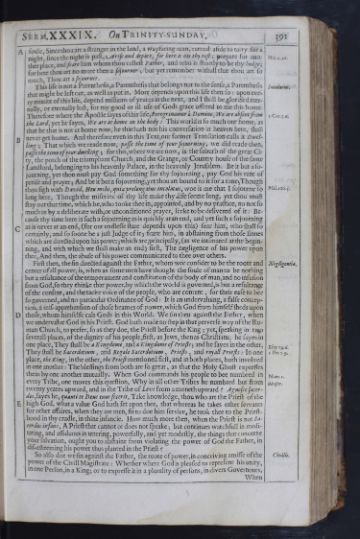 Serm. XXXIX.
On Trinity-sunday.
391
soule, Since thou art a stranger in the land, a wayfaring man, turned aside to tarry for a
Serm. XXXIX.
On Trinity-sunday.
391
soule, Since thou art a stranger in the land, a wayfaring man, turned aside to tarry for a
night, since the night is past, Arise and depart, for here is not thy rest;Mic. 2.10. prepare for ano-
ther place, and feare him whom thou callest Father, and who is shortly to be thy Iudge;
for here thou art no more then a sojourner; but yet remember withall that thou art so
much, Thou art a sojourner.
This life is not a Parenthesis, a Parenthesis that belongs not to the sense, Incolatus. a Parenthesis
that might be left out, as well as put in. More depends upon this life then so: upon eve-
ry minute of this life, depend millions of yeares in the next, and I shall be glorified eter-
nally, or eternally lost, for my good or ill use of Gods grace offered to me this houre.
Therefore where the Apostle sayes of this life, Peregrinamur à Domino,2 Cor. 5.6. We are absent from
the Lord, yet he sayes, We are at home in the body: This world is so much our home, as
that he that is not at home now, he that hath not his conversation in heaven here, shall
never get home. And therefore even in this Text, our former Translation calls it Dwel-
ling; That which we reade now, passe the time of your sojourning, we did reade then,
passe the time of your dwelling; for this, where we are now, is the suburb of the great Ci-
ty, the porch of the triumphant Church, and the Grange, or Country house of the same
Landlord, belonging to his heavenly Palace, in the heavenly Jerusalem. Be it but a so-
journing, yet thou must pay God something for thy sojourning, pay God his rent of
praise and prayer; And be it but a sojourning, yet thou art bound to it for a time; Though
thou sigh with David, Heu mihi, quia prolongatus incolatus,Psal. 120.5. woe is me that I sojourne so
long here, Though the miseries of thy life make thy life seeme long, yet thou must
stay out that time, which he, who tooke thee in, appointed, and by no practice, no not so
much as by a deliberate wish, or unconditioned prayer, seeke to be delivered of it: Be-
cause thy time here is such a sojourning as is quickly atan end, and yet such a sojourning
as is never at an end, (for our endlesse state depends upon this) fear him, who shall so
certainly, and so soone be a just Judge of it; feare him, in abstaining from those sinnes
which are directed upon his power; which are, principally, (as we intimated at the begin-
ning, and with which we shall make an end) first, The negligence of his power upon
thee, And then, the abuse of his power communicated to thee over others.
First then, the sin directed against the Father, Negligentia. whom wee consider to be the roote and
center of all power, is, when as some men have thought the soule of man to be nothing
but a resultance of the temperament and constitution of the body of man, and no infusion
from God, so they thinke that power, by which the world is governed, is but a resultance
of the consent, and the tacite voice of the people, who are content, for their ease to bee
so governed, and no particular Ordinance of God: It is an undervaluing, a false concep-
tion, a mis-apprehension of those beames of power, which God from himself sheds upon
those, whom himselfe cals Gods in this World. We sin then against the Father, when
we undervalue God in his Priest. God hath made no step in that perverse way of the Ro-
man Church, to prefer, so as they doe, the Priest before the King; yet, speaking in two
severall places, of the dignity of his people, first, as Jews, then as Christians, he sayes in
one place, They shall be a Kingdome, and a Kingdome of Priests; and he sayes in the other,
Esay 19.6. They shall be Sacerdotium, and Regale Sacerdotium, Priests, and royall Priests: In one
place, 1 Pet. 2.9. the King, in the other, the Priest mentioned first, and in both places, both involved
in one another: The blessings from both are so great, as that the Holy Ghost expresses
them by one another mutually.Num. 1. When God commands his people to bee numbred in
every Tribe, one moves this question, Why in all other Tribes he numbred but from Oleaster.
twenty yeares upward, and in the Tribe of Levi from a moneth upward? Agnosce sacer-
dos, sayes he, quanti te Deus tuus fecerit, Take knowledge, thou who art the Priest of the
high God, what a value God hath set upon thee, that whereas he takes other servants
for other affaires, when they are men, fit to doe him service, he took thee to the Priest-
hood in thy cradle, in thine infancie. How much more then, when the Priest is not Sa-
cerdos infans, A Priest that cannot or does not speake; but continues watchfull in medi-
tating, and assiduous in uttering, powerfully, and yet modestly, the things that concerne
your salvation, ought you to abstaine from violating the power of God the Father, in
dis-esteeming his power thus planted in the Priest?
So also doe we sin against the Father, the roote of power, Civilis. in conceiving amisse of the
power of the Civill Magistrate: Whether where God is pleased to represent his unity,
in one Person, in a King; or to expresse it in a plurality of persons, in divers Governours, When
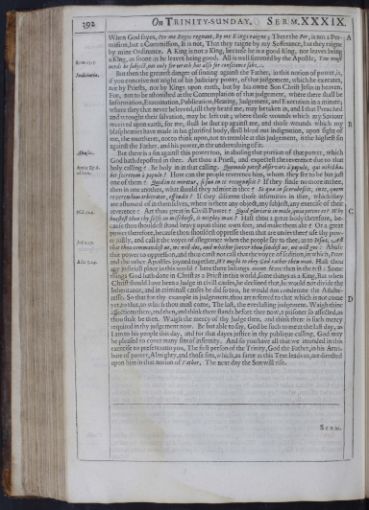 392
On Trinity-sunday.
Serm. XXXIX.
When God sayes, Per me Reges regnant, By me Kings raigne; There the Per, is not a Per-
392
On Trinity-sunday.
Serm. XXXIX.
When God sayes, Per me Reges regnant, By me Kings raigne; There the Per, is not a Per-mission, but a Commission, It is not, That they raigne by my Sufferance, but they raigne
by mine Ordinance. A King is not a King, because he is a good King, nor leaves being
a King, Rom. 13.5. as soone as he leaves being good. All is well summed by the Apostle, You must
needs be subject, not only for wrath, but also for conscience sake.
But then the greatest danger of sinning against the Father, Iudiciaria. in this notion of power, is,
if you conceive not aright of his Judiciary power, of that judgement, which he executes,
not by Priests, nor by Kings upon earth, but by his owne Son Christ Jesus in heaven.
For, not to be astonished at the Contemplation of that judgement, where there shall be
Information, Examination, Publication, Hearing, Judgement, and Execution in a minute;
where they that never beleeved, till they heard me, may be taken in, and I that Preached
and wrought their salvation, may be left out; where those wounds which my Saviour
received upon earth, for me, shall be shut up against me, and those wounds which my
blasphemies have made in his glorified body, shall bleed out indignation, upon sight of
me, the murtherer, not to think upon, not to tremble at this judgement, is the highest sin
against the Father, and his power, in the undervaluing of it.
But there is a sin against this power too, Abusus. in abusing that portion of that power, which
God hath deposited in thee. Art thou a Priest, and expectest the reverence due to that
holy calling?Ambr Ep. 6.-
ad Iren. Be holy in in that calling. Quomodo potest observari à populo, qui nihil ha-
bet secretum à populo? How can the people reverence him, whom they see to be but just
one of them? Quid in te miretur, si sua in te recognoscit? If they finde no more in thee,
then in one another, what should they admire in thee? Si quæ in se erubescit, in te, quem
reverendum arbitratur, offendit? If they discerne those infirmities in thee, which they
are ashamed of in themselves, where is there any object, any subject, any exercise of their
reverence?Psal. 52.1. Art thou great in Civill Power? Quid gloriaris in malo, quia potens es? Why
boastest thou thy selfe in mischiefe, O mighty man? Hast thou a great body therefore, be-
cause thou shouldest stand heavy upon thine own feet, and make them ake? Or a great
power therefore, because thou shouldest oppresse them that are under thee? use thy pow-
er justly, Jos. 1.17. and call it the voyce of allegeance when the people say to thee, as to Iosua, All
that thou commandest us, we will doe, and whither soever thou sendest us, we will goe: Abuse
that power to oppression, and thou canst not call that the voyce of sedition, in which, Peter
and the other Apostles joyned together, Acts 5.29. We ought to obey God rather then man. Hast thou
any judiciall place in this world? here there belongs more feare then in the rest: Some
things God hath done in Christ as a Priest in this world, some things as a King, But when
Christ should have been a Judge in civill causes, he declined that, he would not divide the
Inheritance, and in criminall causes he did so too, he would not condemne the Adulte-
resse. So that for thy example in judgement, thou art referred to that which is not come
yet, to that, to which thou must come, The last, the everlasting judgement. Waigh thine
affections there, and then, and think there stands before thee now, a prisoner so affected, as
thou shalt be then. Waigh the mercy of thy Judge then, and think there is such mercy
required in thy judgement now. Be but able to say, God be such to me at the last day, as
I am to his people this day, and for that dayes justice in thy publique calling, God may
be pleased to cover many sins of infirmity. And so you have all that we intended in this
exercise to present unto you, The first person of the Trinity, God the Father, in his Attri-
bute of power, Almighty, and those sins, which, as farre as this Text leads us, are directed
upon him in that notion of Father. The next day the Son will rise. Serm.
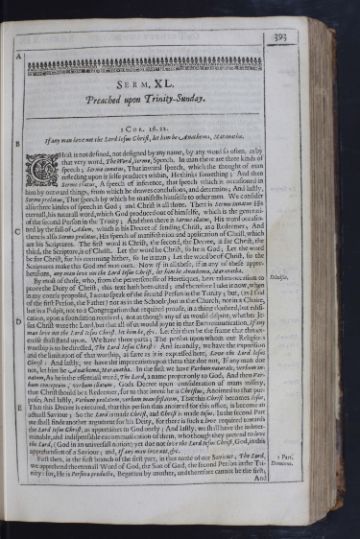
Serm. XL.
Preached upon Trinity-Sunday.
1 Cor. 16.22.
If any man love not the Lord Iesus Christ, let him be Anathema, Maranatha.
CHristChrist is not defined, not designed by any name, by any word so often, as by
that very word, The Word, Sermo, Speech. In man there are three kinds of
speech; Sermo innatus, That inward speech, which the thought of man
reflecting upon it selfe produces within, He thinks something; And then
Sermo illatus, A speech of inference, that speech which is occasioned in
him by outward things, from which he drawes conclusions, and determins; And lastly,
Sermo prolatus, That speech by which he manifests himselfe to other men. We consider
also three kindes of speech in God; and Christ is all three. There is Sermo innatus; His
eternall, his naturall word, which God produced out of himselfe, which is the generati-
of the second Person in the Trinity; And then there is Sermo illatus, His word occasio-
ned by the fall of Adam, which is his Decree of sending Christ, as a Redeemer; And
there is also Sermo prolatus, His speech of manifestation and application of Christ, which
are his Scriptures. The first word is Christ, the second, the Decree, is for Christ, the
third, the Scripture, is of Christ. Let the word be Christ, so he is God; Let the word
be for Christ, for his comming hither, so he is man; Let the word be of Christ, so the
Scriptures make this God and man ours. Now If in all these, if in any of these appre-
hensions, any man love not the Lord Iesus Christ, let him be Anathema, Maranatha.
By most of those, who, from the perversenesse of Heretiques, Divisio. have taken occasion to
prove the Deity of Christ, this text hath been cited; and therefore I take it now, when
in my course proposed, I am to speak of the second Person in the Trinity; but, (as I said
of the first Person, the Father) not as in the Schoole, but in the Church, not in a Chaire,
but in a Pulpit, not to a Congregation that required proofe, in a thing doubted, but edifi-
cation, upon a foundation received; not as though any of us would dispute, whether Je-
sus Christ were the Lord, but that all of us would joyne in that Excommunication, If any
man love not the Lord Iesus Christ, let him be, &c. Let this then be the frame that this ex-
ercise shall stand upon. We have three parts; The person upon whom our Religious
worship is to be directed, The Lord Iesus Christ: And secondly, we have the expression
and the limitation of that worship, as farre as it is expressed here, Love the Lord Iesus
Christ: And lastly, we have the imprecation upon them that doe not, If any man doe
not, let him be Anathema, Maranatha. In the first we have Verbum naturale, verbum in-
natum, As he is the essentiall word, The Lord, a name proper only to God; And then Ver-
bum conceptum, verbum illatum, Gods Decree upon consideration of mans misery,
that Christ should be a Redeemer, for to that intent he is Christus, Anointed to that pur-
pose; And lastly, Verbum prolatum, verbum manifestatum, That this Christ becomes Iesus,
That this Decree is executed, that this person thus anointed for this office, is become an
actuall Saviour; So the Lord is made Christ, and Christ is made Iesus. In the second Part
we shall finde another argument for his Deity, for there is such a love required towards
the Lord Iesus Christ, as appertaines to God onely; And lastly, we shall have the indeter-
minable, and indispensable excommunication of them, who though they pretend to love
the Lord, (God in an universall notion) yet doe not love the Lord Iesus Christ, God, in this
apprehension of a Saviour; and, If any man love not, &c.
First then, in the first branch of the first part, in that name of our Saviour, The Lord, 1 Part.
Dominus.
we apprehend the eternall Word of God, the Son of God, the second Person in the Tri-
nity: for, He is Persona producta, Begotten by another, and therefore cannot be the first; And
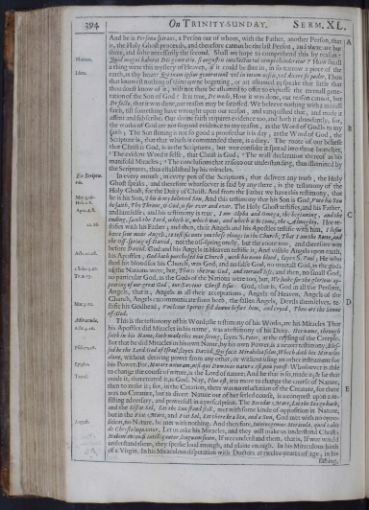 394
On Trinity-sunday.
Serm. XL.
And he is Persona spirans, a Person out of whom, with the Father, another Person, that
394
On Trinity-sunday.
Serm. XL.
And he is Persona spirans, a Person out of whom, with the Father, another Person, that
is, the Holy Ghost proceeds, and therefore cannot be the last Person, and there are but
three, and so he necessarily the second. Shall we hope to comprehend this by reason? Nazian.
Quid magni haberet Dei generatio, si angusti is intellectus tui comprehenderetur? How small
a thing were this mystery of Heaven, if it could be shut in, in so narrow a piece of the
earth, Idem. as thy heart? Qui tuam ipsius generationē vel in totum nescis, vel dicere sit pudor, Thou
that knowest nothing of thine owne begetting, or art ashamed to speake that little that
thou doest know of it, wilt not thou be ashamed to offer to expresse the eternall gene-
ration of the Son of God? It is true, De modo, How it was done, our reason cannot, but
De facto, that it was done, our reason may be satisfied. We beleeve nothing with a morall
faith, till something have wrought upon our reason, and vanquished that, and made it
assent and subscribe. Our divine faith requires evidence too, and hath it abundantly; for,
the works of God are not so good evidence to my reason, as the Word of God is to my
faith; The Sun shining is not so good a proofe that it is day, as the Word of God, the
Scripture is, that that which is commanded there, is a duty. The roote of our beliefe
that Christ is God, is in the Scriptures, but wee consider it spread into three branches,
1 The evident Word it selfe, that Christ is God; 2 The reall declaration thereof in his
manifold Miracles; 3 The conclusions that arise to our understanding; thus illumined by
the Scriptures, thus established by his miracles.
In every mouth, Ex Scriptu-
ris. in every pen of the Scriptures, that delivers any truth, the Holy
Ghost speaks, and therefore whatsoever is said by any there, is the testimony of the
Holy Ghost, for the Deity of Christ. And from the Father we have this testimony, that
he is his Son, Mat. 3. ult. This is my beloved Son, And this testimony that his Son is God, Vnto his Son
he saith, Thy Throne, O God, is for ever and ever. The Holy Ghost testifies, and his Father, Heb. 1.8.
and himselfe;Apoc. 1.8. and his testimony is true, I am Alpha and Omega, the beginning, and the
ending, saith the Lord, which is, which was, and which is to come, the Almighty. Hee te-
stifies with his Father;22.16. and then, their Angels and his Apostles testifie with him, I Iesus
have sent mine Angels, to testifie unto you these things in the Church, That I am the Roote, and
the Off-spring of David, not the off-spring onely, but the roote too, and therefore was
before David. God and his Angels in Heaven testifie it, And visible Angels upon earth,
his Apostles, Acts 20.28. God hath purchased his Church, with his owne blood, sayes S. Paul; He who
shed his blood for his Church, was God; and no false God, no mortall God, as the gods
of the Nations were, 1 Iohn 5.20.
Tit. 2.13. but, This is the true God, and eternall life; and then, no small God,
no particular God, as the Gods of the Nations were too, but, We looke for the glorious ap-
pearing of our great God, our Saviour Christ Iesus: God, that is, God in all the Persons,
Angels, that is, Angels in all their acceptations, Angels of Heaven, Angels of the
Church, Angels excommunicate from both, the fallen Angels, Devils themselves, te-
stifie his Godhead, Mar. 3.11. Vncleane Spirits fell downe before him, and cryed, Thou art the Sonne
of God.
This is the testimony of his Word;Miracula. the testimony of his Works, are his Miracles. That
his Apostles did Miracles in his name, Acts 3.16. was a testimony of his Deity. His name, through
faith in his Name, hath made this man strong, sayes S. Peter, at the raysing of the Creeple.
But that he did Miracles in his own Name, by his own Power, is a nearer testimony; Bles-
sed be the Lord God of Israel,Psal. 72.18. sayes David, Qui facit Mirabilia solus, Which doth his Miracles
alone, without deriving power from any other, or without using an other instrument for
his Power.Epipha. For, Mutare naturam, nisi qui Dominus naturæ est, non potest: Whosoever is able
to change the course of nature, is the Lord of nature; And he that is so, made it; & he that
made it, Tertul. that created it, is God. Nay, Plus est, it is more to change the course of Nature,
then to make it; for, in the Creation, there was no reluctation of the Creature, for thereE
was no Creature, but to divert Nature out of her setled course, is a conquest upon a re-
sisting adversary, and powerfull in a prescription. The Recedat Mare, Let the Sea go back,
and the Sistat Sol, Let the Sun stand still, met with some kinde of opposition in Nature,
but in the Fiat Mare, and Fiat Sol, Let there be a Sea, and a Sun, God met with no oppo-
sition, no Nature, August. he met with nothing. And therefore, Interrogemus Miracula, quid nobis
de Christo loquantur, Let us aske his Miracles, and they will make us understand Christ;
Habent enim si intelligantur, linguam suam, If wee understand them, that is, If wee would
understand them, they speake loud enough, and plaine enough. In his Miraculous birth
of a Virgin, In his Miraculous disputation with Doctors at twelve yeares of age, in his fasting,
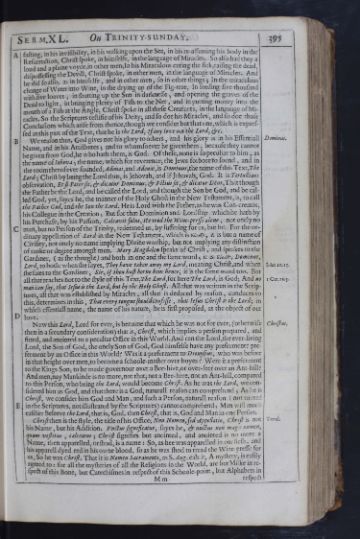 Serm. XL.
On Trinity-sunday.
395
fasting, in his invisibility, in his walking upon the Sea, in his re-assuming his body in the
Serm. XL.
On Trinity-sunday.
395
fasting, in his invisibility, in his walking upon the Sea, in his re-assuming his body in the
Resurrection, Christ spoke, in himselfe, in the language of Miracles. So also had they a
loud and a plaine voyce, in other men; In his Miraculous curing the sick, raising the dead,
dispossessing the Devill, Christ spoke, in other men, in the language of Miracles. And
he did so also, as in himselfe, and in other men, so in other things; In the miraculous
change of Water into Wine, in the drying up of the Fig-tree, In feeding five thousand
with five loaves, in shutting up the Sun in darknesse, and opening the graves of the
Dead to light, in bringing plenty of Fish to the Net, and in putting money into the
mouth of a Fish at the Angle, Christ spoke in all these Creatures, in the language of Mi-
racles. So the Scriptures testifie of his Deity, and so doe his Miracles, and so doe those
Conclusions which arise from thence, though we consider but that one, which is expres-
sed in this part of the Text, that he is the Lord, If any love not the Lord, &c.
We reason thus, God gives not his glory to others, Dominus. and his glory is in his Essentiall
Name, and in his Attributes; and to whomsoever he gives them, because they cannot
be given from God, he who hath them, is God. Of these, none is so peculiar to him, as
the name of Iehova; the name, which for reverence, the Jews forbore to sound, and in
the room therof ever sounded, Adonai, and Adonai, is Dominus, the name of this Text, The
Lord; Christ by being the Lord thus, is Jehovah, and if Jehovah, God. It is Tertullians
observation, Et ss Pater sit, & dicatur Dominus, & Filius sit, & dicatur Deus, That though
the Father be the Lord, and be called the Lord, and though the Son be God, and be cal-
led God, yet, sayes he, the manner of the Holy Ghost in the New Testament, is, to call
the Father God, and the Son the Lord. He is Lord with the Father, as he was Con-creator,
his Collegue in the Creation; But for that Dominion and Lordship which he hath by
his Purchase, by his Passion, Calcavit solus, Ple trod the Wine-presse alone, not onely no
man, but no Person of the Trinity, redeemed us, by suffering for us, but he. For the or-
dinary appellation of Lord in the New Testament, which is Κύριος, it is but a name of
Civility, not onely no name implying Divine worship, but not implying any distinction
of ranke or degree amongst men. Mary Magdalen speaks of Christ, and speakes to the
Gardiner, (as she thought) and both in one and the same word; it is Κύριος, Dominus,
Lord, to both: when she sayes, They have taken away my Lord, meaning Christ, Iohn 20.15. and when
she saies to the Gardiner, Sir, if thou hast borne him hence, it is the same word too. But
all that reaches not to the style of this Text, The Lord, for here The Lord, is God;1 Cor. 12.3. And no
man can say, that Iesus is the Lord, but by the Holy Ghost. All that was written in the Scrip-
tures, all that was established by Miracles, all that is deduced by reason, conduces to
this, determines in this, That every tongue should confesse, that Iesus Christ is the Lord; in
which essentiall name, the name of his nature, he is first proposed, as the object of our
love.
Now this Lord, Lord for ever, is become that which he was not for ever, Christus. (otherwise
then in a secondary consideration) that is, Christ, which implies a person prepared, and
sitted, and anointed to a peculiar Office in this World. And can the Lord, the ever-living
Lord, the Son of God, the onely Son of God, God himselfe have any preferment? pre-
ferment by an Office in this World? Was it a preferment to Dionysius, who was before
in that height over men, to become a schoole-master over boyes? Were it a preferment
to the Kings Son, to be made governour over a Bee-hive, or over-seer over an Ant-hill?
And men, nay Mankinde is no more, not that, not a Bee-hive, not an Ant-hill, compared
to this Person, who being the Lord, would become Christ. As he was the Lord, we con-
sidered him as God, and that there is a God, naturall reason can comprehend; As he is
Christ, we consider him God and Man, and such a Person, naturall reason (not rooted
in the Scriptures, not illustrated by the Scriptures) cannot comprehend; Man will much
easilier beleeve the Lord, that is, God, then Christ, that is, God and Man in one Person.
Christ then is the style, the title of his Office; Non Nomen, sed Appellatio, Tertul. Christ is not
his Name, but his Addition. Vnctus significatur, sayes he, & unctus non magis nomen,
quam vestitus, calceatus; Christ signifies but anointed, and anointed is no more a
Name, then apparelled, or shod, is a name: So, as hee was apparelled in our flesh, and
his apparell dyed red in his owne blood, so as he was shod to tread the Wine-presse for
us, So he was Christ. That it is Nomen Sacramenti, as S. Aug. cals it, A mystery, is easily
agreed to: for all the mysteries of all the Religions in the World, are but Milke in re-
spect of this Bone, but Catechismes in respect of this Schoole-point, but Alphabets in Mm respect
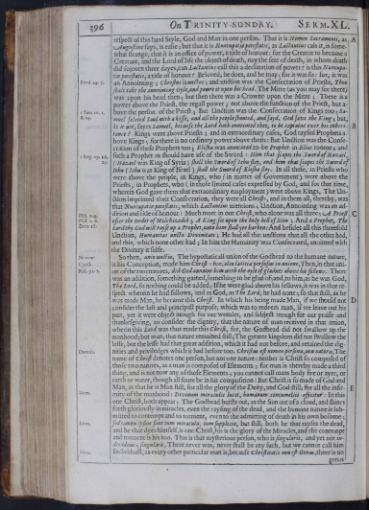 396
On trinity-sunday.
Serm. XL.
respect of this hard Style, God and Man in one person. That it is Nomen Sacramenti, as
396
On trinity-sunday.
Serm. XL.
respect of this hard Style, God and Man in one person. That it is Nomen Sacramenti, as
Augustine says, is easie; but that it is Nuncupatio potestatis, as Lactantius cals it, is some-
what strange, that it is an office of power, a title of honour: for the Creator to become a
Creature, and the Lord of life the object of death, nay the seat of death, in whom death
did sojourn three dayes, can Lactantius call this a declaration of power? is this Nuncupa-
tio potestatis, a title of honour? Beloved, he does, and he may; for it was so: for, it was
an Annointing;Exod. 29.7. Christas is unctus; and unction was the Consecration of Priests, Thou
shalt take the annointing Oyle, and powre it upon his head. The Mitre (as you may see there)
was upon his head then; but then there was a Crowne upon the Mitre; There is a
power above the Priest, the regall power; not above the function of the Priest, but a-
bove the person of the Priest;1 Sam. 10.1.
& 24. But Unction was the Consecration of Kings too; Sa-
muel saluted Saul with a kisse, and all the people shouted, and sayd, God save the King; but,
Is it not, sayes Samuel, because the Lord hath annointed thee, to be captaine over his inheri-
tance? Kings were above Priests; and in extraordinary cases, God raysed Prophets a-
bove Kings; for there is no ordinary power above them: But Unction was the Conse-
cration of these Prophets too; Elisha was annointed to be Prophet in Elias roome; and
such a Prophet as should have use of the Sword:1 Reg. 19.16,
17. Him that scapes the Sword of Hazael,
(Hazael was King of Syria) shall the Sword of Iehu slay, and him that scapes the Sword of
Iehu (Iehu was King of Israel) shall the Sword of Elisha slay. In all these, in Priests who
were above the people, in Kings, who (in matter of Government) were above the
Priests, in Prophets, who (in those limited cases expressed by God, and for that time,
wherein God gave them that extraordinary employment) were above Kings, The Un-
ction imprinted their Consecration, they were all Christs, and in them all, thereby, was
that Nuncupatio potestatis, which Lactantius mentions; Unction, Annointing was an ad-
dition and title of honour:Psal. 109. Much more in our Christ, who alone was all three; A Priest
Psal. 2.6. after the Order of Melchizedek; A King set upon the holy hill of Sion; And a Prophet, The
Deut. 18. Lord thy God will rayse up a Prophet, unto him shall yee harken: And besides all this threefold
Unction, Humanitas uncta Divinitate; He had all the unctions that all the other had,
and this, which none other had; In him the Humanity was Consecrated, anointed with
the Divinity it selfe.
So then, Nazian: unio unctio, The hypostaticall union of the Godhead to the humane nature,
Cyrill. is his Conception, made him Christ: for, oleo lætitia perfusus in unione, Then, in that Psal. 95.7. uni-
on of the two natures, did God annoint him with the oyle of gladnes above his fellows. There
was an addition, something gained, something to be glad of; and, to him, as he was God,
The Lord, so nothing could be added; If he were glad above his fellows, it was in that re-
spect wherein he had fellows, and as God, as The Lord, he had none; so that still, as he
was made Man, he became this Christ. In which his being made Man, if we should not
consider the last and principall purpose, which was to redeem man, if we leave out his
part, yet it were object inough for our wonder, and subject inough for our praise and
thankesgiving, to consider the dignity, that the nature of man received in that union,
wherin this Lord was thus made this Christ, for, the Godhead did not swallow up the
manhood; but man, that nature remained still; The greater kingdom did not swallow the
lesse, but the lesse had that great addition, which it had not before, and retained the dig-
nities and priviledges which it had before too.Damasc. Christus est nomen personæ, non naturæ, The
name of Christ denotes one person, but not one nature: neither is Christ so composed of
those two natures, as a man is composed of Elements; for man is thereby made a third
thing, and is not now any of those Elements; you cannot call mans body fire or ayre, or
earth or water, though all foure be in his composition: But Christ is so made of God and
Man, as that he is Man still, for all the glory of the Deity, and God still, for all the infir-
mity of the manhood:Idem. Divinum miraculis lucet, humanum contumeliis afficitur: In this
one Christ, both appear; The Godhead bursts out, as the Sun out of a cloud, and shines
forth gloriously in miracles, even the raysing of the dead, and the humane nature is sub-
mitted to contempt and to torment, even to the admitting of death in his own bosome;
sed tamen ipsius sunt tum miraculæ, Idem. tum supplicia, but still, both he that rayses the dead,
and he that dyes himself, is one Christ, his is the glory of the Miracles, and the contempt
and torment is his too. This is that mysterious person, who is singularis, and yet not in-
dividuus; singularis, There never was, never shall be any such, but we cannot call him
Individuall, Idem. as every other particular man is, because Christitatis non est Genus, there is no genus
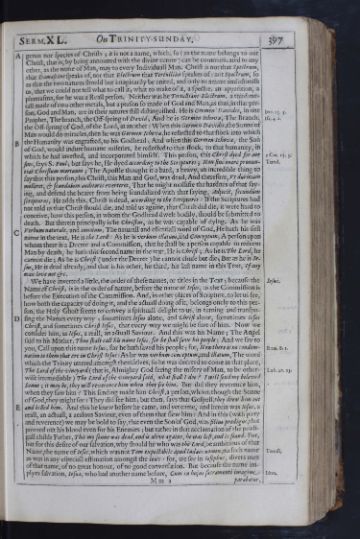 Serm. XL.
On Trinity-sunday.
397
genus nor species of Christs; it is not a name, which, so (as the name belongs to our
Serm. XL.
On Trinity-sunday.
397
genus nor species of Christs; it is not a name, which, so (as the name belongs to our
Christ, that is, by being annointed with the divine nature) can be communicated to any
other, as the name of Man, may to every Individuall Man. Christ is not that Spectrum,
that Damascene speaks of, nor that Electrum that Tertullian speakes of; not Spectrum, so
as that the two natures should but imaginarily be united, and only to amaze and astonish
us, that we could not tell what to call it, what to make of it, a spectre, an apparition, a
phantasma, for he was a Reall person. Neither was he Tertullians Electrum, a third me-
tall made of two other metals, but a person so made of God and Man, as that, in that per-
son, God and Man, are in their natures still distinguished. He is Germen Davidis, Iere. 23.5. in one
Isa. 4.2. Prophet, The branch, the Off-spring of David; And he is Germen Iehovæ, The Branch,
the Off-spring of God, of the Lord, in another: When this Germen Davidis, the Sonne of
Man would do miracles, then he was Germen Iehovæ, he reflected to that stock into which
the Humanity was engrafted, to his Godhead; And when this Germen Iehovæ, the Son
of God, would indure humane miseries, he reflected to that stock, to that humanity, in
which he had invested, and incorporated himself. This person, 1 Cor. 15.3. this Christ dyed for our
Tertul. sins, says S. Paul; but says he, He dyed according to the Scriptures; Non sine onere pronun-
ciat Christum mortuum; The Apostle thought it a hard, a heavy, an incredible thing to
say that this person, this Christ, this Man and God, was dead, And therefore, Vt duritiam
molliret, & scandalum auditoris everteret, That he might mollifie the hardnes of that say-
ing, and defend the hearer from being scandalized with that saying, Adjecit, secundùm
scripturas, He adds this, Christ is dead, according to the Scriptures: If the Scriptures had
not told us that Christ should die, and told us againe, that Christ did die, it were hard to
conceive, how this person, in whom the Godhead dwelt bodily, should be submitted to
death. But therein principally is he Christus, as he was capable of dying. As he was
Verbum naturale, and innatum, The naturall and essentiall word of God, He hath his first
name in the text, He is the Lord: As he is verbum illatum, and Conceptum, A person upon
whom there is a Decree and a Commission, that he shall be a person capable to redeem
Man by death, he hath this second name in the text, He is Christ; As he is The Lord, he
cannot die; As he is Christ (under the Decree) he cannot chuse but die; But as he is Ie-
sus, He is dead already, and that is his other, his third, his last name in this Text, If any
man love not &c.
We have inverted a little, the order of these names, or titles in the Text;Iesus. because the
Name of Christ, is in the order of nature, before the name of Iesus, as the Commission is
before the Execution of the Commission. And, in other places of Scripture, to let us see,
how both the capacity of doing it, and the actuall doing of it, belongs onely to this per-
son, the Holy Ghost seems to convey a spirituall delight to us, in turning and transpo-
sing the Names every way; sometimes Iesus alone, and Christ alone, sometimes Iesus
Christ, and sometimes Christ Iesus, that every way we might be sure of him. Now we
consider him, as Iesus, a reall, an actuall Saviour. And this was his Name; The Angel
said to his Mother, Thou shalt call his name Iesus, for he shall save his people; And we say to
you, Call upon this name Iesus, for he hath saved his people; for, Rom. 8.1. Now there is no condem-
nation to them that are in Christ Iesus: As he was verbum conceptum, and illatum, The word
which the Trinity uttered amongst themselves, so he was decreed to come in that place,
The Lord of the vineyard (that is, Almighty God seeing the misery of Man, Luk. 20.13. to be other-
wise irremediable) The Lord of the vineyard said, what shall I doe? I will send my beloved
Sonne; it may be, they will reverence him when they see him. But did they reverence him,
when they saw him? This sending made him Christ, a person, whom, though the Sonne
of God, they might see: They did see him; but then, says that Gospell, they drew him out
and killed him. And this he knew before he came, and yet came, and herein was Iesus, a
reall, an actuall, a zealous Saviour, even of them that slew him: And in this (with piety
and reverence) we may be bold to say, that even the Son of God, was filius prodigus, that
powred out his blood even for his Enemies; but rather in that acclamation of the prodi-
gall childs Father, This my sonne was dead, and is alive againe, he was lost, and is found. For,
but for this desire of our salvation, why should he who was the Lord, be ambitious of that
Name, the name of Iesus, which was not Tam expectabile apud Iudæos nomen, Tertull. no such name
as was in any especiall estimation amongst the Iews: for, we see in Ioscphus, divers men
of that name, of no great honour, of no good conversation. But because the name im-
plyes salvation, Iosua, who had another name before, Idem. Cum in hujus sacramenti imagine Mm2 parabatur,
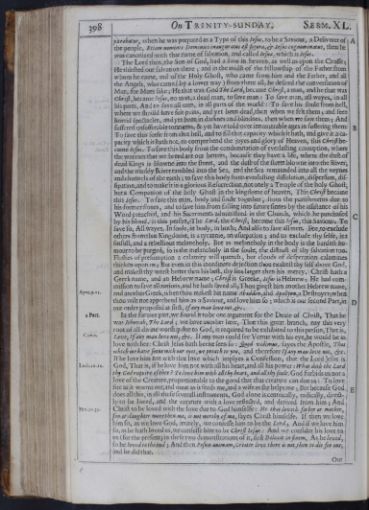 398
On trinity-sunday.
Serm. XL.
parabatur, when he was prepared as a Type of this Iesus, to be a Saviour, a Deliverer of
398
On trinity-sunday.
Serm. XL.
parabatur, when he was prepared as a Type of this Iesus, to be a Saviour, a Deliverer of
the people, Etiam nominis Dominici inaugur atus est figuræ, & Iesus cognominatus, then he
was canonized with that name of salvation, and called Iosua, which is Iesus.
The Lord then, the Son of God, had a Sitio in heaven, as well as upon the Crosse;
He thirsted our salvation there; and in the midst of the fellowship of the Father from
whom he came, and of the Holy Ghost, who came from him and the Father, and all
the Angels, who came (by a lower way) from them all, he desired the conversation of
Man, for Mans sake; He that was God The Lord, became Christ, a man, and he that was
Christ, became Iesus, no man, a dead man, to save man: To save man, all wayes, in all
his parts, And to save all men, in all parts of the world: To save his soule from hell,
where we should have felt pains, and yet been dead, then when we felt them; and seen
horrid spectacles, and yet been in darknes and blindnes, then when we saw them; And
suffered unsufferable torments, & yet have told over innumerable ages in suffering them:
To save this soule from that hell, and to fill that capacity which it hath, and give it a ca-
pacity which it hath not, to comprehend the joyes and glory of Heaven, this Christ be-
came Iesus. To save this body from the condemnation of everlasting corruption, where
the wormes that we breed are our betters, because they have a life, where the dust of
dead Kings is blowne into the street, and the dust of the street blowne into the River,
and the muddy River tumbled into the Sea, and the Sea remaunded into all the veynes
and channels of the earth; to save this body from everlasting dissolution, dispersion, dis-
sipation, and to make it in a glorious Resurrection, not onely a Temple of the holy Ghost,
but a Companion of the holy Ghost in the kingdome of heaven, This Christ became
this Iesus. To save this man, body and soule together, from the punishments due to
his former sinnes, and to save him from falling into future sinnes by the assistance of his
Word preached, and his Sacrrments administred in the Church, which he purchased
by his bloud, is this person, The Lord, the Christ, become this Iesus, this Saviour. To
save so, All wayes, In soule, in body, in both; And also to save all men. For, to exclude
others from that Kingdome, is a tyrannie, an usurpation; and to exclude thy selfe, is a
sinfull, and a rebellious melancholy. But as melancholy in the body is the hardest hu-
mour to be purged, so is the melancholy in the soule, the distrust of thy salvation too.
Flashes of presumption a calamity will quench, but clouds of desperation calamities
thicken upon us; But even in this inordinate dejection thou exaltest thy self above God,
and makest thy worst better then his best, thy sins larger then his mercy. Christ hath a
Greek name, and an Hebrew name; Christ is Greeke, Iesus is Hebrew; He had com-
mission to save all nations, and he hath saved all; Thou givest him another Hebrew name,
and another Greek, Apoc. 9.11. when thou makest his name Abaddon, and Apollyon, a Destroyer; when
thou wilt not apprehend him as a Saviour, and love him so; which is our second Part, in
our order proposed at first, If any man love not, &c.
In the former part, 2 Part. we found it to be one argument for the Deitie of Christ, That he
was Iehovah, The Lord; we have another here, That this great branch, nay this very
root of all divine worship due to God, is required to be exhibited to this person, That is,
Love,Cicero. If any man love not, &c. If any man could see Vertue with his eye, he would be in
love with her: Christ Jesus hath beene seen so: Quod vidimus, sayes the Apostle, That
which we have seene with our eyes, we preach to you, and therefore If any man love not, &c.
If he love him not with that love which implyes a Confession, that the Lord Jesus is
God, Levit. 10.12. That is, if he love him not with all his heart, and all his power: What doth the Lord
thy God require of thee? To love him with all thy heart, and all thy soule. God forbids us not a
love of the Creature, proportionable to the good that that creature can doe us: To love
fire as it warms me, and meat as it feeds me, and a wife as she helps me; But because God
does all this, in all these severall instruments, God alone is centrically, radically, direct-
ly to be loved, and the creature with a love reflected, and derived from him; And
Christ to be loved with the love due to God himselfe:Mat. 10.37. He that loveth father or mother,
son or daughter more then me, is not worthy of me, sayes Christ himselfe. If then we love
him so, as we love God, intirely, we confesse him to be the Lord; And if we love him
so, as he hath loved us, we confesse him to be Christ Iesus: And we consider his love to
us (for the present) in these two demonstrations of it, first Dilexit in finem, As he loved,
so he loved to the end; And then Posuit animam, Greater love there is not, then to die for one,
and he did that. Our
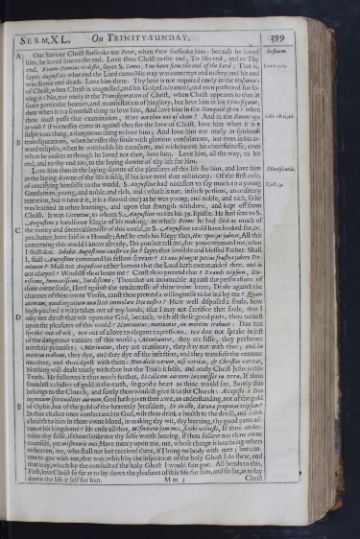 Serm. XL.
On Trinity-sunday.
399
Serm. XL.
On Trinity-sunday.
399
Our Saviour Christ forsooke not Peter, when Peter forsooke him:In finem. because he loved
him, he loved him to the end. Love thou Christ to the end; To His end, and to Thy
end. Finem Domini vidistis, sayes S. Iames, You have seene the end of the Lord; That is,
Iames 5.11. sayes August. to what end the Lord came; His way was contempt and misery, and his end
was shame and death: Love him there. Thy love is not required onely in the Hosanna's
of Christ, when Christ is magnified, and his Gospel advanced, and men preferred for lo-
ving it: No, nor onely in the Transfiguration of Christ, when Christ appeares to thee in
some particular beames, and manifestation of his glory; but love him in his Crucifigatur,
then when it is a scornfull thing to love him, And love him in the Nunquid & tu? when
thou must passe that examination, Wert not thou one of them?Iohn 18.25, 26. And in the Nonne ego
te vidi? if witnesses come in against thee for the love of Christ, love him when it is a
suspicious thing, a dangerous thing to love him; And love him not onely in spirituall
transfigurations, when he visits thy soule with glorious consolations, but even in his in-
ward eclipses, when he withholds his comforts, and withdrawes his cheerfulnesse, even
when he makes as though he loved not thee, love him. Love him, all the way, to his
end, and to thy end too, to the laying downe of thy life for him.
Love him then in the laying downe of the pleasures of this life for him, Mortificatio. and love him
in the laying downe of the life it selfe, if his love need that testimony. Of the first case,
of crucifying himselfe to the world, Epist. 39. S. Augustine had occasion to say much to a young
Gentleman, young, and noble, and rich, and (which is not, in such persons, an ordinary
tentation, but where it is, it is a shrewd one) as he was young, and noble, and rich, so he
was learned in other learnings, and upon that strength withdrew, and kept off from
Christ. It was Licentius, to whom S. Augustine writes his 39. Epistle. He had sent to S.
Augustine a handsome Elegie of his making, in which Poeme he had said as much of
the vanity and deceivablenesse of this world, as S. Augustine could have looked for, or,
perchance, have said in a Homily; And he ends his Elegy thus, Hoc opus, ut jubeas, All this
concerning this world I know already, Do you but tell me, doe you command me, what
I shall doe. Iubebit Augustinus conservo suo? sayes that sensible and blessed Father: Shall
I, shall Augustine command his fellow-servant? Et non plang at potiùs frustra juberc Do-
minum? Must not Augustine rather lament that the Lord hath commanded thee, and is
not obeyed? Wouldst thou heare me? Canst thou pretend that? Exaudi teipsum, Du-
rissime, Immanissime, Surdissime; Thou that art inoxorable against the perswasions of
thine owne soule, Hard against the tendernesse of thine owne heart, Deafe against the
charmes of thine owne Verses, canst thou pretend a willingnesse to be led by me? Quam
animam, quod ingenium non licet immolare Deo nostro? How well disposed a soule, how
high pitched a wit is taken out of my hands, that I may not sacrifice that soule, that I
may not direct that wit upon our God, because, with all these good parts, thou turnest
upon the pleasures of this world? Mentiuntur, moriuntur, in mortem trahunt: Doe not
speake out of wit, nor out of a love to elegant expressions, nor doe not speake in jest
of the dangerous vanities of this world; Mentiuntur, they are false, they performe
not their promises; Moriuntur, they are transitory, they stay not with thee; and In
mortem trahunt, they dye, and they dye of the infection, and they transfuse the venome
into thee, and thou dyest with them: Non dicit verum, nisi veritas, & Christus veritas,
Nothing will deale truely with thee but the Truth it selfe, and onely Christ Jesus is this
Truth. He followes it thus much farther, Si calicem aureum invenisses in terræ, If thou
foundest a chalice of gold in the earth, so good a heart as thine would say, Surely this
belongs to the Church, and surely thou wouldst give it to the Church: Accepisti à Deo
ingenium spiritualiter aureum, God hath given thee a wit, an understanding, not of the gold
of Ophir, but of the gold of the heavenly Jerusalem, Et in illo, Satanæ propinas teipsum?
In that chalice once consecrated to God, wilt thou drink a health to the devill, and drink
a health to him in thine owne bloud, in making thy wit, thy learning, thy good parts ad-
vance his kingdome? He ends all thus, Miserearis jam mei, si tibi viluisti, If thou under-
value thy selfe, if thou thinke not thy selfe worth hearing, if thou follow not thine owne
counsels, yet miserearis mei, Have mercy upon me, me, whose charge it is to bring others
to heaven, me, who shall not bee received there, if I bring no body with mee; bee con-
tent to goe with me, that way, which by the inspiration of the holy Ghost I do shew, and
that way, which by the conduct of the holy Ghost I would fain goe. All bends to this,
First, love Christ so far as to lay down the pleasures of this life for him, and so far, as to lay
down the life it self for him. Mm3 Christ
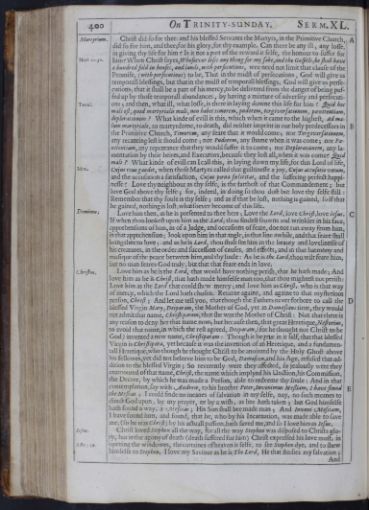 400
On Trinity-sunday.
Serm. XL.
400
On Trinity-sunday.
Serm. XL.
Christ did so for thee:Martyrium. and his blessed Servants the Martyrs, in the Primitive Church,
did so for him, and thee; for his glory, for thy example. Can there be any ill, any losse,
in giving thy life for him? Is it not a part of the reward it selfe, the honour to suffer for
him?Mark 10.30. When Christ sayes, Whosoever loses any thing for my sake, and the Gospels, he shall have
a hundred fold in houses, and lands, with persecutions, wee need not limit that clause of the
Promise, (with persecutions) to be, That in the midst of persecutions, God will give us
temporall blessings, but that in the midst of temporall blessings, God will give us perse-
cutions; that it shall be a part of his mercy, to be delivered from the danger of being puf-
fed up by those temporall abundances, by having a mixture of adversity and persecuti-
ons; and then, Tertul. what ill, what losse, is there in laying downe this life for him? Quid hoc
mali est, quod martyrialis mali, non habet timorem, pudorem, tergiversationem, pœnitentiam,
deplorationem? What kinde of evill is this, which when it came to the highest, Ad ma-
lum martyriale, to martyrdome, to death, did neither imprint in our holy predecessors in
the Primitive Church, Timorem, any feare that it would come; not Tergiversationem,
any recanting lest it should come; nor Pudorem, any shame when it was come; nor Pœ-
nitentiam, any repentance that they would suffer it to come; nor Deplorationem, any la-
mentation by their heires, and Executors, because they lost all, when it was come? Quid
mali? What kinde of evill can I call this, in laying down my life, for this Lord of life,
Cujus reus gaudet,Idem. when those Martyrs called that guiltinesse a joy, Cujus accusatio votum,
and the accusation a satisfaction, Cujus pœna fœlicitas, and the suffering perfect happi-
nesse? Love thy neighbour as thy selfe, is the farthest of that Commandement; but
love God above thy selfe; for, indeed, in doing so thou dost but love thy selfe still:
Remember that thy soule is thy selfe; and as if that be lost, nothing is gained, so if that
be gained, nothing is lost, whatsoever become of this life.
Love him then, Dominus. as he is presented to thee here; Love the Lord, love Christ, love Iesus.
If when thou lookest upon him as the Lord, thou findest frowns and wrinkles in his face,
apprehensions of him, as of a Judge, and occasions of feare, doe not run away from him,
in that apprehension; look upon him in that angle, in that line awhile, and that feare shall
bring thee to love; and as he is Lord, thou shalt see him in the beauty and lovelinesse of
his creatures, in the order and succession of causes, and effects, and in that harmony and
musique of the peace between him, and thy soule: As he is the Lord, thou wilt feare him,
but no man feares God truly, but that that feare ends in love.
Love him as he is the Lord,Christus. that would have nothing perish, that he hath made; And
love him as he is Christ, that hath made himselfe man too, that thou mightest not perish:
Love him as the Lord that could shew mercy; and love him as Christ, who is that way
of mercy, which the Lord hath chosen. Returne againe, and againe to that mysterious
person, Christ; And let me tell you, that though the Fathers never forbore to call the
blessed Virgin Mary, Deiparam, the Mother of God, yet in Damascens time, they would
not admit that name, Christiparam, that she was the Mother of Christ: Not that there is
any reason to deny her that name now; but because then, that great Heretique, Nestorius,
to avoid that name, in which the rest agreed, Deiparam, (for he thought not Christ to be
God) invented a new name, Christiparam: Though it be true in it self, that that blessed
Virgin is Christipara, yet because it was the invention of an Heretique, and a fundamen-
tall Heretique, who though he thought Christ to be anointed by the Holy Ghost above
his fellowes, yet did not beleeve him to be God, Damascen, and his Age, refused that ad-
dition to the blessed Virgin; So reverently were they affected, so jealously were they
enamoured of that name, Christ, the name which implyed his Unction, his Commission,
the Decree, by which he was made a Person, able to redeeme thy soule: And in that
contemplation, say with Andrew, to his brother Peter, Invenimus Messiam; I have found
the Messias; I could finde no meanes of salvation in my selfe, nay, no such meanes to
direct God upon, by my prayer, or by a wish, as hee hath taken; but God himselfe
hath found a way, a Messias; His Son shall bee made man; And Inveni Messiam,
I have found him, and found, that he, who by his Inearnation, was made able to save
me, (so he was Christ) by his actuall passion, hath saved me, and so I love him as Iesus.
Christ loved Stephen all the way, Iesus. for all the way Stephen was disposed to Christs glo-
ry, but in the agony of death (death suffered for him) Christ expressed his love most, in
opening the windowes, Acts 7.56. the curtaines of heaven it selfe, to see Stephen dye, and to shew
himselfe to Stephen. I love my Saviour as he is The Lord, He that studies my salvation; And
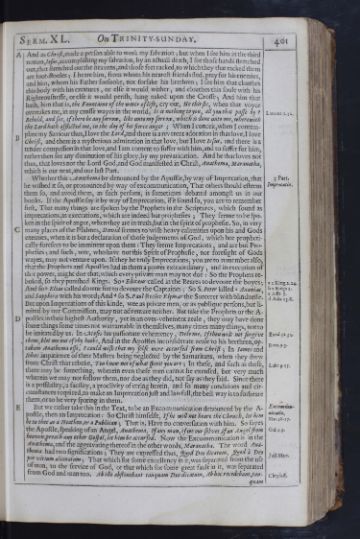 Serm. XL.
On Trinity-sunday.
401
And as Christ, made a person able to work my salvation; but when I see him in the third
Serm. XL.
On Trinity-sunday.
401
And as Christ, made a person able to work my salvation; but when I see him in the third
notion, Iesus, accomplishing my salvation, by an actuall death, I see those hands stretched
out, that stretched out the heavens, and those feet racked, to which they that racked them
are foot-stooles; I heare him, from whom his nearest friends fled, pray for his enemies,
and him, whom his Father forsooke, not forsake his brethren; I see him that cloathes
this body with his creatures, or else it would wither, and cloathes this soule with his
Righteousnesse, or else it would perish, hang naked upon the Crosse; And him that
hath, him that is, the Fountaine of the water of life, cry out, He thirsts, when that voyce
overtakes me, in my crosse wayes in the world, Is it nothing to you, all you that passe by?
Lament. 1.12. Behold, and see, if there by any sorrow, like unto my sorrow, which is done unto me, wherewith
the Lord hath afflicted me, in the day of his fierce anger; When I conceit, when I contem-
plate my Saviour thus, I love the Lord, and there is a reverent adoration in that love, I love
Christ, and there is a mysterious admiration in that love, but I love Iesus, and there is a
tender compassion in that love, and I am content to suffer with him, and to suffer for him,
rather then see any diminution of his glory, by my prevarication. And he that loves not
thus, that loves not the Lord God, and God manifested in Christ, Anathema, Maranatha,
which is our next, and our last Part.
Whether this Anathema be denounced by the Apostle, by way of Imprecation, 3 Part.
Imprecatio. that
he wished it so, or pronounced by way of excommunication, That others should esteem
them so, and avoid them, as such persons, is sometimes debated amongst us in our
books. If the Apostle say it by way of Imprecation, if it sound so, you are to remember
first, That many things are spoken by the Prophets in the Scriptures, which sound as
imprecations, as execrations, which are indeed but prophesies; They seeme to be spo-
ken in the spirit of anger, when they are in truth, but in the spirit of prophesie. So, in very
many places of the Psalmes, David seemes to wish heavy calamities upon his and Gods
enemies, when it is but a declaration of those judgements of God, which hee propheti-
cally foresees to be imminent upon them: They seeme Imprecations, and are but Pro-
phesies; and such, wee, who have not this Spirit of Prophesie, nor foresight of Gods
wayes, may not venture upon. If they be truly Imprecations, you are to remember also,
that the Prophets and Apostles had in them a power extraordinary, and in execution of
that power, might doe that, which every private man may not doe: So the Prophets re-
buked, so they punished Kings. Soa 2 King. 2.24. aElizeus called in the Beares to devoure the boyes;
And sob 2 Kings 1. bElias called downe fire to devoure the Captaines; So S. Peter killed cAnanias,
and Sapphira with his word; And dso c Acts 5. S. Paul stroke Elymas the Sorcerer with blindnesse.
d Acts 13.8. But upon Imprecations of this kinde, wee as private men, or as publique persons, but li-
mited by our Commission, may not adventure neither. But take the Prophets or the A-
postles in their highest Authority, yet in an over-vehement zeale, they may have done
some things some times not warrantable in themselves, many times many things, not to
be imitated by us. In Moses his passionate vehemency, Dele me,Exod. 32.32. If thou wilt not forgive
them, blot me out of thy booke, And in the Apostles inconfiderate zeale to his brethren, Op-
tabam Anathema esse, I could wish that my selfe were accursed from Christ;Rom. 9.3. In Iames and
Iohns impatience of their Masters being neglected by the Samaritans, when they drew
from Christ that rebuke, You know not of what spirit you are; In these, Luke 9.55. and such as these,
there may be something, wherein even these men cannot be excused, but very much
wherein we may not follow them, nor doe as they did, nor say as they said. Since there
is a possibility, a facility, a proclivity of erring herein, and so many conditions and cir-
cumstances required, to make an Imprecation just and lawfull, the best way is to forbeare
them, or to be very sparing in them.
But we rather take this in the Text, Excommu-
nicatio. to be an Excommunication denounced by the A-
postle, then an Imprecation: So Christ himselfe, If he will not heare the Chruch, let him
be to thee as a Heathen, or a Publican; That is, Have no conversation with him. So sayes
the Apostle, speaking of an Angel, Anathema, If any man, if we our selves,Gal. 1.9. if an Angel from
heaven, preach any other Gospel, let him be accursed. Now the Excommunication is in the
Anathema, and the aggravating thereof in the other words, Maranatha. The word Ana-
thema had two significations; They are expressed thus, Quod Deo dicatum,Just. Mart. Quod à Deo
per vitium alienatum; That which for some excellency in it, was separated from the use
of man, to the service of God, or that which for some great fault in it, was separated
from God and man too. Ab illo abstinebant tanquam Deo dicatum, Ab hoc recedebant,Chrysost. tan quam
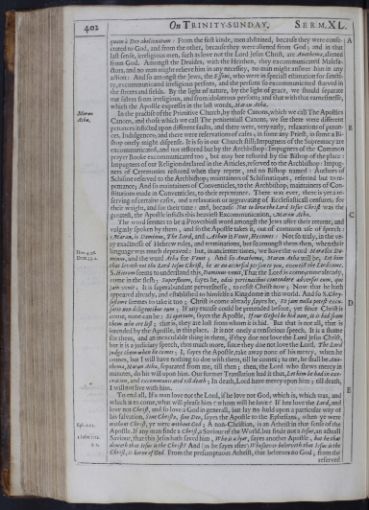 402
On Trinity-sunday.
Serm. XL.
quam à Deo abalienatum: From the first kinde, men abstained, because they were conse-
402
On Trinity-sunday.
Serm. XL.
quam à Deo abalienatum: From the first kinde, men abstained, because they were conse-crated to God, and from the other, because they were aliened from God; and in that
last sense, irreligious men, such as love not the Lord Jesus Christ, are Anathema, aliened
from God. Amongst the Druides, with the Heathen, they excommunicated Malefa-
ctors, and no man might relieve him in any necessity, no man might answer him in any
action: And so amongst the Jews, the Esseni, who were in speciall estimation for sancti-
ty, excommunicated irreligious persons, and the persons so excommunicated starved in
the streets and fields. By the light of nature, by the light of grace, we should separate
our selves from irreligious, and from idolatrous persons; and that with that earnestnesse,
which the Apostle expresses in the last words, Maran
Atha. In the practise of the Primitive Church, Maran
Atha. by those Canons, which we call The Apostles
Canons, and those which we call The penitentiall Canons, we see there were different
penances inflicted upon different faults, and there were, very early, relaxations of penan-
ces, Indulgences; and there were reservations of cases; in some any Priest, in some a Bi-
shop onely might dispense. It is so in our Church still; Impugners of the Supremacy are
excommunicated, and not restored but by the Archbishop: Impugners of the Common
prayer Booke excommunicated too, but may bee restored by the Bishop of the place:
Impugners of our Religion declared in the Articles, reserved to the Archbishop: Impug-
ners of Ceremonies restored when they repent, and no Bishop named: Authors of
Schisme reserved to the Archbishop; maintainers of Schismatiques, referred but to re-
pentance; And so maintainers of Conventicles, to the Archbishop; maintainers of Con-
stitutions made in Conventicles, to their repentance. There was ever, there is yet a re-
serving of certaine cases, and a relaxation or aggravating of Ecclesiasticall censures, for
their waight, and for their time: and, because Not to love the Lord Iesus Christ was the
greatest, the Apostle inflicts this heaviest Excommunication, Maran Atha.
The word seemes to be a Proverbiall word amongst the Jews after their returne, and
vulgarly spoken by them, and so the Apostle takes it, out of common use of speech:
Maran, is Dominus, The Lord, and Athan is Venit, He comes: Not so truly, in the ve-
ry exactnesse of Hebrew rules, and terminations, but so amongst them then, when their
language was much depraved:Dan. 4.16. but, in ancienter times, we have the word Mara for Do-
minus, Deut. 33.2. and the word Atha for Venit; And so Anathema, Maran Atha will be, Let him
that loveth not the Lord Iesus Christ, be as an accursed person to you, even till the Lord come.
S. Hierom seems to understand this, Dominus venit, That the Lord is come; come already,
come in the flesh; Superfluum, sayes he, odiis pertinacibus contendere adversus eum, qui
jam venit; It is superabundant perversnesse, to resist Christ now; Now that he hath
appeared already, and established to himselfe a Kingdome in this world. And so S. Chry-
sostome seemes to take it too; Christ is come already, sayes he, Et jam nulla potest excu-
satio non diligentibus eum; If any excuse could be pretended before, yet since Christ is
come, none can be: Si opertum, sayes the Apostle, If our Gospel be hid now, it is hid from
them who are lost; that is, they are lost from whom it is hid. But that is not all, that is
intended by the Apostle, in this place. It is not onely a censorious speech, It is a shame
for them, and an inexcusable thing in them, if they doe not love the Lord Jesus Christ,
but it is a judiciary speech, thus much more, since they doe not love the Lord, The Lord
judge them when he comes; I, sayes the Apostle, take away none of his mercy, when he
comes, but I will have nothing to doe with them, till he comes; to me, he shall be Ana-
thema, Maran Atha, separated from me, till then; then, the Lord who shews mercy in
minutes, do his will upon him. Our former Translation had it thus, Let him be had in exe-
cration, and excommunicated till death; In death, Lord have mercy upon him; till death,
I will not live with him.
To end all, If a man love not the Lord, if he love not God, which is, which was, and
which is to come, what will please him? whom will he love? If hee love the Lord, and
love not Christ, and so love a God in generall, but lay no hold upon a particular way of
his salvation, Sine Christo, sine Deo, sayes the Apostle to the Ephesians, when ye were
without Christ,Eph. 2.12. ye were without God; A non-Christian, is an Atheist in that sense of the
Apostle. If any man finde a Christ, a Saviour of the World, but finde not a Iesus, an actuall
Saviour, 1 Iohn 2.22. that this Jesus hath saved him, Who is a lyar, sayes another Apostle, but he that
denieth that Iesus is the Christ?1 Iohn 5.1. And (as he sayes after) Whosoever beleeveth that Iesus is the
Christ, is borne of God. From the presumptuous Atheist, that beleeves no God, from the reserved
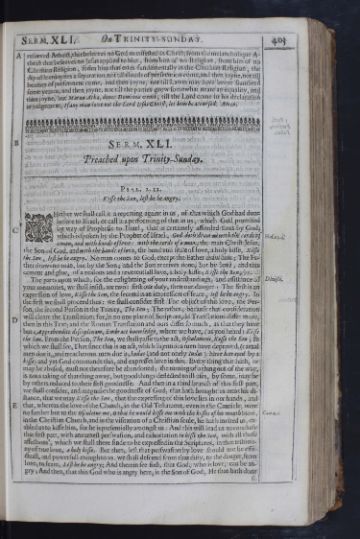 Serm. XLI.
On Trinity-sunday.
403
reserved Atheist, that beleeves no God manifested in Christ, from the melancholique A-
Serm. XLI.
On Trinity-sunday.
403
reserved Atheist, that beleeves no God manifested in Christ, from the melancholique A-theist that beleeves no Jesus applied to him, from him of no Religion, from him of no
Christian Religion, from him that erres fundamentally in the Christian Religion, the
Apostle enjoynes a separation, not till clouds of persecution come, and then joyne, not till
beames of preferment come, and then joyne, not till Lawes may have beene slumbred
some yeares, and then joyne, not till the parties grow somewhat neare an equality, and
then joyne, but Maran Atha, donec Dominus venit, till the Lord come to his declaration
in judgement, If any man love not the Lord Iesus Christ, let him be accursed. Amen.
Serm. XLI.
Preached upon Trinity-Sunday.
Psal. 2.12.
Kisse the Son, lest he be angry.
WHetherWhether we shall call it a repeating againe in us, of that which God had done
before to Israel, or call it a performing of that in us, which God promised
by way of Prophesie to Israel, that is certainely afforded to us by God,
which is spoken by the Prophet of Israel, Hos. 11.4. God doth draw us with the cords of
a man, and with bands of love: with the cords of a man, the man Christ Jesus,
the Son of God, and with the bands of love, the band and seale of love, a holy kisse, Kisse
the Son, lest he be angry. No man comes to God, except the Father draw him; The Fa-
ther draws no man, but by the Son; and the Son receives none, but by love, and this
cement and glue, of a zealous and a reverentiall love, a holy kisse; Kisse the Son, &c.
The parts upon which, for the enlightning of your understandings, Divisio. and assistance of
your memories, we shall insist, are two: first our duty, then our danger; The first is an
expression of love, Kisse the Son; the second is an impression of feare, lest he be angry. In
the first we shall proceed thus: we shall consider first The object of this love, the Per-
son, the second Person in the Trinity, The Son; The rather, because that consideration
will cleare the Translation; for, in no one place of Scripture, do Translations differ more,
then in this Text; and the Roman Translation and ours differ so much, as that they have
but Apprehendite disciplinam, Embrace knowledge, where we have, (as you heard) Kisse
the Son. From the Person, The Son, we shall passe to the act, Osculamini, Kisse the Son; In
which we shall see, That since this is an act, which licentious men have depraved, (carnal
men doe it, and treacherous men doe it; Iudas (and not onely Iudas) have betrayed by a
kisse) and yet God commands this, and expresses love in this, Every thing that hath, or
may be abused, must not therefore be abandoned; the turning of a thing out of the way,
is not a taking of that thing away, but good things deflected to ill uses, by some, may be
by others reduced to their first goodnesse. And then in a third branch of this first part,
we shall consider, and magnifie the goodnesse of God, that hath brought us into this di-
stance, that we may Kisse the Son, that the expressing of this love lies in our hands, and
that, whereas the love of the Church, in the Old Testament, even in the Canticle, went
no farther but to the Osculetur me, O that he would kisse me with the kisses of his mouth! now,
Cant. 1.1. in the Christian Church, and in the visitation of a Christian soule, he hath invited us, en-
abled us to kisse him, for he is presentially amongst us: And this will lead us to conclude
that first part, with an earnest perswasion, and exhortation to kisse the Son, with all those
affections, which we shall there finde to be expressed in the Scriptures, in that testimo-
ny of true love, a holy kisse. But then, lest that perswasion by love should not be effe-
ctuall, and powerfull enough to us, we shall descend from that duty, to the danger, from
love, to feare, Lest he be angry; And therein see first, that God, who is love, can be an-
gry; And then, that this God who is angry here, is the Son of God, He that hath done so
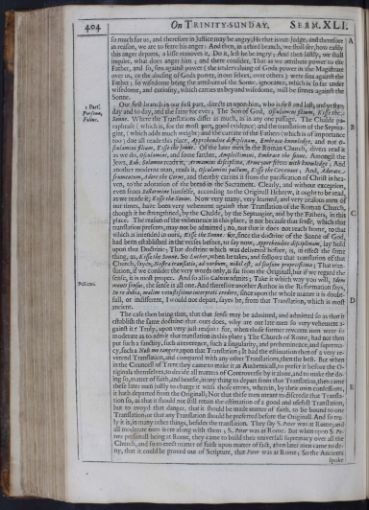 404
On Trinity-sunday.
Serm. XLI.
so much for us, and therefore in Justice may be angry; He that is our Judge, and therefore
404
On Trinity-sunday.
Serm. XLI.
so much for us, and therefore in Justice may be angry; He that is our Judge, and therefore
in reason, we are to feare his anger: And then, in a third branch, we shall see, how easily
this anger departs, a kisse removes it, Do it, lest he be angry; And then lastly, we shall
inquire, what does anger him; and there consider, That as we attribute power to the
Father, and so, sins against power (the undervaluing of Gods power in the Magistrate
over us, or the abusing of Gods power, in our selves, over others) were sins against the
Father; so wisedome being the attribute of the Sonne, ignorance, which is so far under
wisedome, and curiosity, which carries us beyond wisedome, will be sinnes against the
Sonne.
Our first branch in our first part, 1 Part.
Persona,
Filius. directs us upon him, who is first and last, and yester-
day and to day, and the same for ever; The Son of God, Osculamini filium, Kisse the
Sonne. Where the Translations differ as much, as in any one passage. The Chalde pa-
raphrase (which is, for the most part, good evidence) and the translation of the Septua-
gint, (which adds much weight) and the currant of the Fathers (which is of importance
too) doe all reade this place, Apprehendite disciplinam, Embrace knowledge, and not O-
sculamini filium, Kisse the sonne. Of the later men in the Roman Church, divers read it
as we do, Osculamini, and some farther, Amplectimini, Embrace the sonne. Amongst the
Jews, Rab. Solomon reads it, Armanini disciplina, Arme your selves with knowledge; And
another moderne man, reads it, Osculamini pactum, Kisse the Covenant; And, Adorate
frumentum, Adore the Corne, and thereby carries it from the pacification of Christ in hea-
ven, to the adoration of the bread in the Sacrament. Clearly, and without exception,
even from Bellarmine himselfe, according to the Originall Hebrew, it ought to be read,
as we reade it, Kisse the Sonne. Now very many, very learned, and very zealous men of
our times, have been very vehement against that Translation of the Roman Church,
though it be strengthned, by the Chalde, by the Septuagint, and by the Fathers, in this
place. The reason of the vehemence in this place, is not because that sense, which that
translation presents, may not be admitted; no, nor that it does not reach home, to that
which is intended in ours, Kisse the Sonne: for, since the doctrine of the Sonne of God,
had been established in the verses before, to say now, Apprehendite disciplinam, lay hold
upon that Doctrine; That doctrine which was delivered before, is, in effect the same
thing, as, Kisse the Sonne. So Luther, when he takes, and follows that translation of that
Church, sayes, Nostra translatio, ad verbum, nihil est, ad sensum propriissima; That tran-
slation, if we consider the very words only, is far from the Originall, but if we regard the
sense, it is most proper. And so also Calvin admits; Take it which way you will, Idem
manet sensus,Pellican. the sense is all one. And therefore another Author in the Reformation says,
In re dubia, malim vetustissimo interpreti credere, since upon the whole matter it is doubt-
full, or indifferent, I would not depart, sayes he, from that Translation, which is most
ancient.
The case then being thus, that that sense may be admitted, and admitted so as that it
establish the same doctrine that ours does, why are our late men so very vehement a-
gainst it? Truly, upon very just reason: for, when those former reverent men were so
moderate as to admit that translation in this place; The Church of Rome, had not then
put such a sanctity, such a reverence, such a singularity, and preheminence, and suprema-
cy, such a Noli me tangere, upon that Translation; It had the estimation then of a very re-
verend Translation, and compared with any other Translations, then the best. But when
in the Councell of Trent they came to make it as Authenticall, to prefer it before the O-
riginals themselves, to decide all matters of Controversie by it alone, and to make the do-
ing so, matter of faith, and heresie, in any thing to depart from that Translation, then came
these later men justly to charge it with those errors, wherein, by their own confessions,
it hath departed from the Originall; Not that these men meant to discredit that Transla-
tion so, as that it should not still retain the estimation of a good and usefull Translation,
but to avoyd that danger, that it should be made matter of faith, to be bound to one
Translation; or that any Translation should be preferred before the Originall. And so tru-
ly it is, in many other things, besides the translation. They say S. Peter was at Rome; and
all moderate men went along with them; S. Peter was at Rome. But when upon S. Pe-
ters personall being at Rome, they came to build their universall supremacy over all the
Church, and so to erect matter of faith upon matter of fact, then later men came to de-
ny, that it could be proved out of Scripture, that Peter was at Rome; So the Ancients spoke
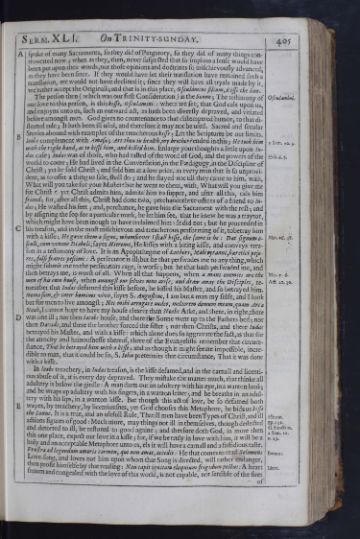 Serm. XLI.
On Trinity-sunday.
405
spoke of many Sacraments, so they did of Purgatory, so they did of many things con-
Serm. XLI.
On Trinity-sunday.
405
spoke of many Sacraments, so they did of Purgatory, so they did of many things con-troverted now; when as they, then, never suspected that so impious a fense would have
been put upon their words, nor those opinions and doctrines so mischievously advanced,
as they have been since. If they would have let their translation have remained such a
translation, we would not have declined it; since they will have all tryals made by it,
we rather accept the Originall; and that is in this place, Osculamini filium, Kisse the Son.
The person then (which was our first Consideration) is the Sonne;Osculamini. The testimony of
our love to this person, is this kisse, Osculamini: where we see, that God cals upon us,
and enjoyns unto us, such an outward act, as hath been diversly depraved, and vitiated
before amongst men. God gives no countenance to that distempered humor, to that di-
storted rule; It hath been ill used, and therefore it may not be used. Sacred and secular
Stories abound with examples of the treacherous kisse; Let the Scriptures be our limits.
Ioabs complement with Amasa; Art thou in health, my brother? ended in this;2 Sam. 20.9. He took him
with the right hand, as to kisse him, and killed him. Enlarge your thoughts a little upon Iu-
das case; Iudas was of those, who had tasted of the word of God, Heb. 6.5. and the powers of the
world to come; He had lived in the Conversation, in the Paedagogy, in the Discipline of
Christ; yet he sold Christ; and sold him at a low price, as every man that is so unprovi-
dent, as to offer a thing to sale, shall do; and he stayed not till they came to him, with,
What will you take for your Master? but he went to them, with, What will you give me
for Christ? yet Christ admits him, admits him to supper, and after all this, cals him
friend; for, after all this, Christ had done two, perchance three offices of a friend to Iu-
das; He washed his feet; and, perchance, he gave him the Sacrament with the rest; and
by assigning the sop for a particular mark, he let him see, that he knew he was a traytor,
which might have been inough to have reclaimed him: It did not; but he proceeded in
his treason, and in the most mischievous and treacherous performing of it, tobetray him
with a kisse; He gave them a signe, whomsoever I shall kisse, the same is he:Mat. 26.48. Dat signum o-
sculi, cum veneno Diaboli, sayes Hierome, He kisses with a biting kisse, and conveys trea-
son in a testimony of love. It is an Apophthegme of Luthers, Mali tyranni, hæretiei pejo-
res, falsi fratres pessimi: A persecutor is ill; but he that perswades me to any thing, which
might submit me to the persecutors rage, is worse; but he that hath perswaded me, and
then betrays me, is worst of all.Mic. 7.6.
Act. 20.30. When all that happens, when a mans enemies are the
men of his own house, when amongst our selves men arise, and draw away the Disciples, re-
member that Iudas defamed this kisse before, he kissed his Master, and so betrayed him.
Homo sum, & inter homines vivo, sayes S. Augustine, I am but a man my selfe, and I look
but for men to live amongst; Nec mihi arrogare audeo, meliorem domum meam, quam Arca
Noah, I cannot hope to have my house clearer than Noahs Arke, and there, in eight, there
was one ill; nor then Iacobs house, and there the Sonne went up to the Fathers bed; nor
then Davids, and there the brother forced the sister; nor then Christs, and there Iudas
betrayed his Master, and with a kisse: which alone does so aggravate the fact, as that for
the atrocity and hainousnesse thereof, three of the Evangelists remember that circum-
stance, That he betrayed him with a kisse; and as though it might seeme impossible, incre-
dible to man, that it could be so, S. Iohn pretermits that circumstance, That it was done
with a kisse.
In Ioabs treachery, in Iudas treason, is the kisse defamed, and in the carnall and licenti-
ous abuse of it, it is every day depraved. They mistake the matter much, that thinke all
adultery is below the girdle: A man darts out an adultery with his eye, in a wanton look;
and he wraps up adultery with his fingers, in a wanton letter; and he breaths in an adul-
tery with his lips, in a wanton kisse. But though this act of love, be so defamed both
wayes, by treachery, by licentiousnes, yet God chooses this Metaphore, he bids us kisse
the Sonne. It is a true, and an usefull Rule, That ill men have been Types of Christ, Hieron.
Ep. 131. and ill
actions figures of good: Much more, may things not ill in themselves, though deflected
and detorted to ill, be restored to good againe; and therfore doth God, in more then G. Sanctius.
this one place, expect our love in a kisse; for, if we be truly in love with him, it will be a 2 Sam. 11.
n. 29.
holy and an acceptable Metaphore unto us, els it will have a carnall and a fastidious taste.
Frustra ad legendum amoris carmen, qui non amat, accedit:Bernar. He that comes to read Solomons
Love song, and loves not him upon whom that Song is directed, will rather endanger,
then profit himselfe by that reading: Non capit ignitum eloquium frigidum pectus:Idem. A heart
frozen and congealed with the love of this world, is not capable, not sensible of the fires of
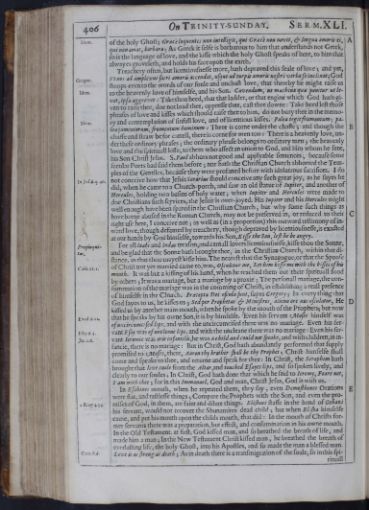 406
On Trinity-sunday.
Serm. XLI.
Idem. of the holy Ghost; Græcè loquentes non intelligit, qui Græcè non novit, & lingua amoris ei,
406
On Trinity-sunday.
Serm. XLI.
Idem. of the holy Ghost; Græcè loquentes non intelligit, qui Græcè non novit, & lingua amoris ei,
qui non amat, barbara; As Greek it selfe is barbarous to him that understands not Greek,
so is the language of love, and the kisse which the holy Ghost speaks of here, to him that
alwayes groveleth, and holds his face upon the earth.
Treachery often, but licentiousnesse more, hath depraved this seale of love; and yet,
Gregor. Vt nos ad amplexus sacri amoris accendat, usque ad turpis amoris nostri verba se inclinat; God
stoops even to the words of our foule and unchast love, that thereby he might raise us
Idem. to the heavenly love of himselfe, and his Son. Cavendum, ne machina quæ ponitur ut le-
vet, ipsa aggrevet: Take thou heed, that that ladder, or that engine which God hath gi-
ven to raise thee, doe not load thee, oppresse thee, cast thee downe: Take heed lest those
phrases of love and kisses which should raise thee to him, do not bury thee in the memo-
ryIdem. and contemplation of sinfull love, and of licentious kisses. Palea tegit frumentum; pa-
lea jumentorum, frumentum hominum: There is corne under the chaffe; and though the
chaffe and straw be for cattell, there is corne for men too: There is a heavenly love, un-
der these ordinary phrases; the ordinary phrase belongs to ordinary men; the heavenly
love and the spirituall kisse, to them who affect an union to God, and him whom he sent,
his Son Christ Jesus. S. Paul abhors not good and applyable sentences, because some
secular Poets had said them before; nor hath the Christian Church abhorred the Tem-
ples of the Gentiles, because they were profaned before with idolatrous sacrifices. I do
In Jos. 6. q. 40. not conceive how that Jesuit Serarius should conceive any such great joy, as he sayes he
did, when he came to a Church-porch, and saw an old statue of Iupiter, and another of
Hercules, holding two basins of holy water; when Iupiter and Hercules were made to
doe Christians such services, the Jesuit is over-joyed. His Iupiter and his Hercules might
well enough have been spared in the Christian Church, but why some such things as
have beene abused in the Roman Church, may not be preserved in, or reduced to their
right use here, I conceive not; as well as (in a proportion) this outward testimony of in-
ward love, though defamed by treachery, though depraved by licentiousnesse, is exacted
at our hands by God himselfe, towards his Son, Kisse the Son, lest he be angry.
Propinqui-
tas. For all Ioabs and Iudas treason, and carnall lovers licentiousnesse, kisse thou the Sonne,
and be glad that the Sonne hath brought thee, in the Christian Church, within that di-
stance, as that thou mayest kisse him. The nearest that the Synagogue, or that the Spouse
Cant. 11.1. of Christ not yet married came to, was, Osculetur me, Let him kisse me with the kisses of his
mouth. It was but a kissing of his hand, when he reached them out their spirituall food
by others; It was a mariage, but a mariage by a proxie; The personall mariage, the con-
summation of the mariage was in the comming of Christ, in establishing a reall presence
of himselfe in the Church. Præcepta Dei oscula sunt, sayes Gregory; In every thing that
God sayes to us, he kisses us; Sed per Prophetas & Ministros, alieno ore nos osculatur, He
kissed us by another mans mouth, when he spoke by the mouth of the Prophets; but now
Exod. 6.12 that he speaks by his owne Son, it is by himselfe. Even his servant Moses himself was
of uncircumcised lips, and with the uncircumcised there was no mariage. Even his ser-
vantEsay 6.5. Esay was of uncleane lips, and with the uncleane there was no mariage: Even his ser-
vantJer. 1.6. Ieremie was oris infantilis, he was a child and could not speake, and with children, in in-
fancie, there is no mariage: But in Christ, God hath abundantly performed that supply
promised to Moses, there, Aaron thy brother shall be thy Prophet; Christ himselfe shall
come and speake to thee, and returne and speak for thee: In Christ, the Seraphim hath
brought that live coale from the Altar, and touched Esayes lips, and so spoken lively, and
clearly to our soules; In Christ, God hath done that which he said to Ieremy, Feare not,
I am with thee; for in this Immanuel, God and man, Christ Jesus, God is with us.
In Eschines mouth, when he repeated them, they say, even Demosthenes Orations
were flat, and tastlesse things; Compare the Prophets with the Son, and even the pro-
mises2 King. 4.34. of God, in them, are faint and dilute things. Elishaes staffe in the hand of Gehazi
his servant, would not recover the Shunamites dead child; but when Elisha himselfe
came, and put his mouth upon the childs mouth, that did: In the mouth of Christs for-
mer servants there was a preparation, but effect, and consummation in his owne mouth.
In the Old Testament. at first, God kissed man, and so breathed the breath of life, and
made him a man; In the New Testament Christ kissed man, he breathed the breath of
everlasting life, the holy Ghost, into his Apostles, and so made the man a blessed man.
Cant. 8.6. Love is as strong as death; As in death there is a transmigration of the soule, so in this spi-
rituall
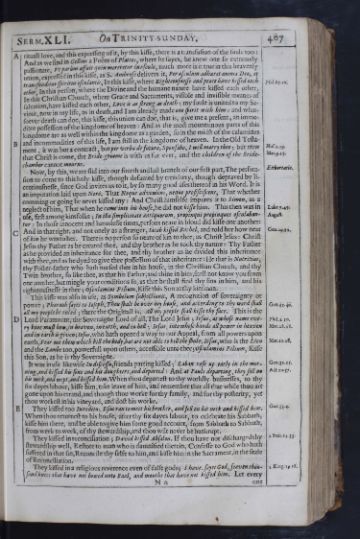 Serm.XLI.
On Trinity Sunday.
407
rituall love, and this expressing of it, by this kisse, there is a transfusion of the soule too:
Serm.XLI.
On Trinity Sunday.
407
rituall love, and this expressing of it, by this kisse, there is a transfusion of the soule too:
And as we find in Gellius a Poëm of Platoes, where he sayes, he knew one so extremely
passionate, Vt parùm affuit quin moreretur in osculo, much more is it true in this heavenly
union, expressed in this kisse, as S. Ambrose delivers it, Per osculum adhæret anima Deo, et
transfunditur spiritus osculantis, Psal. 85.10. In this kisse, where Righteousnesse and peace have kissed each
other, In this person, where the Divine and the humane nature have kissed each other,
In this Christian Church, where Grace and Sacraments, visible and invisible meanes of
salvation, have kissed each other, Love is as strong as death; my soule is united to my Sa-
viour, now in my life, as in death, and I am already made one spirit with him: and what-
soever death can doe, this kisse, this union can doe, that is, give me a present, an imme-
diate possession of the kingdome of heaven: And as the most mountainous parts of this
kingdome are as well within the kingdome as a garden, so in the midst of the calamities
and incommodities of this life, I am still in the kingdome of heaven. In the Old Testa-
ment, it was but a contract, but per verba de futuro, Sponsabo, I will marry thee; but now Hos. 2.19.
that Christ is come, the Bride-groome is with us for ever, and the Mat. 9.15. children of the Bride-
chamber cannot mourne.
Now, by this, we are slid into our fourth and last branch of our first part, Exhortatio. The perswa-
sion to come to this holy kisse, though defamed by treachery, though depraved by li-
centiousnesse, since God invites us to it, by so many good uses thereof in his Word. It is
an imputation laid upon Nero, That Neque adveniens, neque profisciscens, That whether
comming or going he never kissed any: And Christ himselfe imputes it to Simon, as a
neglect of him, That when he came into his house, he did not kisse him.Luke 7.45. This then was in
August. use, first among kinsfolks; In illa simplicitate antiquorum, propinqui propinquos osculaban-
tur: In those innocent and harmlesse times, persons neare in bloud did kisse one another:
And in that right, and not onely as a stranger, Iacob kissed Rachel,Gen. 29.12. and told her how near
of kin he was to her. There is no person so neare of kin to thee, as Christ Jesus: Christ
Jesus thy Father as he created thee, and thy brother as he took thy nature: Thy Father
as he provided an inheritance for thee, and thy brother as he divided this inheritance
with thee, and as he dyed to give thee possession of that inheritance: He that is Nutritius,
thy Foster-father who hath nursed thee in his house, in the Christian Church, and thy
Twin-brother, so like thee, as that his Father, and thine in him, shall not know you from
one another, but mingle your conditions so, as that he shall find thy sins in him, and his
righteousnesse in thee; Osculamini Filium, Kisse this Son as thy kinsman.
This kisse was also in use, as Symbolum subjectionis, A recognition of soveraignty or
power; Gen. 41.40. Pharaoh sayes to Ioseph, Thou shalt be over my house, and according to thy word shall
all my people be ruled; there the Originall is, All my people shall kisse thy face. This is the
Phil. 2.10. Lord Paramount, the Soveraigne Lord of all, The Lord Jesus; Iesus, at whose name eve-
ry Mat. 28.18. knee must bow, in heaven, in earth, and in hell; Iesus, into whose hands all power in heaven
and in earth is given; Iesus, who hath opened a way to our Appeal; from all powers upon
earth, Fear not them which kill the body, but are not able to kill the soule; Iesus,Mat. 10.28. who is the Lion
and the Lambe too, powerfull upon others, accessible unto thee; Osculamini Filium, Kisse
this Son, as he is thy Soveraigne.
It was in use likewise In discessu, friends parting kissed;Gen. 31.15. Laban rose up early in the mor-
ning, and kissed his sons and his daughters, and departed: Act. 20.37. And at Pauls departing, they fell on
his neck, and wept, and kissed him. When thou departest to thy worldly businesses, to thy
six dayes labour, kisse him, take leave of him, and remember that all that while thou art
gone upon his errand, and though thou worke for thy family, and for thy posterity, yet
thou workest in his vineyard, and dost his worke.
They kissed too In reditu; Esau ran to meet his brother, and fell on his neck and kissed him. Gen. 33.4.
When thou returnest to his house, after thy six dayes labour, to celebrate his Sabbath,
kisse him there, and be able to give him some good account, from Sabbath to Sabbath,
from week to week, of thy stewardship, and thou wilt never be bankrupt.
They kissed in reconciliation; David kissed Absalon.2 Sam. 14.33. If thou have not discharged thy
stewardship well, Restore to man who is damnified therein, Confesse to God who hath
suffered in that sin, Reconcile thy selfe to him, and kisse him in the Sacrament, in the seale
of Reconciliation.
They kissed in a religious reverence even of false gods; I have, sayes God,2 King. 19 18. seaven thou-
sand knees that have not bowed unto Baal, and mouths that have not kissed him. Let every Nn one
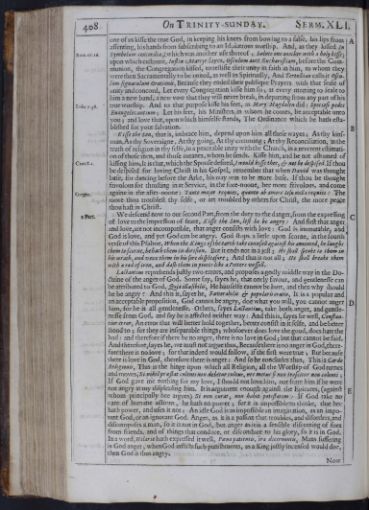 408
On Trinity Sunday.
Serm.XLI.
one of us kisse the true God, in keeping his knees from bowing to a false, his lips from
408
On Trinity Sunday.
Serm.XLI.
one of us kisse the true God, in keeping his knees from bowing to a false, his lips from
assenting, his hands from subscribing to an Idolatrous worship. And, as they kissed In
Symbolum concordiæ, Rom. 16.16. (which was another use thereof; Salute one another with a holy kisse)
upon which custome, Iustin Martyr sayes, Osculum ante Eucharistiam, before the Com-
munion, the Congregation kissed, to testifie their unity in faith in him, to whom they
were then Sacramentally to be united, as well as Spiritually, And Tertullian calls it Oscu-
lum signaculum Orationis, Because they ended their publique Prayers with that seale of
unity and concord, Let every Congregation kisse him so; at every meeting to seale to
him a new band, a new vow that they will never break, in departing from any part of his
true worship.Luke 7.38. And to that purpose kisse his feet, as Mary Magdalen did: Speciosi pedes
Euangelizantium; Let his feet, his Ministers, in whom he comes, be acceptable unto
you; and love that, upon which himselfe stands, The Ordinance which he hath esta-
blished for your salvation.
Kisse the Son, that is, imbrace him, depend upon him all these wayes; As thy kins-
man, As thy Soveraigne, At thy going, At thy comming; At thy Reconciliation, in the
truth of religion in thy selfe, in a peaceable unity with the Church, in a reverent estimati-
on of those men, and those meanes, whom he sends. Kisse him, and be not ashamed of
kissing him;Cant. 8.1. It is that, which the Spouse desired, I would kisse thee, & not be despised. If thou
be despised for loving Christ in his Gospel, remember that when David was thought
base, for dancing before the Arke, his way was to be more base. If thou be thought
frivolous for thrusting in at Service, in the fore-noone, bee more frivolous, and come
againe in the after-noone:Gregor. Tanto major requies, quanto ab amore Iesu nulla requies: The
more thou troublest thy selfe, or art troubled by others for Christ, the more peace
thou hast in Christ.
We descend now to our second Part, 2 Part. from the duty to the danger, from the expressing
of love to the impression of feare, Kisse the Son, lest he be angry: And first that anger
and love, are not incompatible, that anger consists with love: God is immutable, and,
God is love, and yet God can be angry. God stops a little upon scorne, in the fourth
verse of this Psalme, When the Kings of the earth take counsell against his anointed, he laughs
them to scorne, he hath them in dirision. But it ends not in a jest; He shall speake to them in
his wrath, and vexe them in his sore displeasure; And that is not all; He shall breake them
with a rod of iron, and dash them in pieces like a Potters vessell.
Lactantius reprehends justly two errors, and proposes a godly middle way in the Do-
ctrine of the anger of God. Some say, sayes he, that onely favour, and gentlenesse can
be attributed to God, Quia illæsibilis, He himselfe cannot be hurt, and then why should
he be angry? And this is, sayes he, Favorabilis & popularis oratio, It is a popular and
an acceptable proposition, God cannot be angry, doe what you will, you cannot anger
him, for he is all gentlenesse. Others, sayes Lactantius, take both anger, and gentle-
nesse from God, and say he is affected neither way: And this is, sayes he well, Constan-
tior error, An error that will better hold together, better consist in it selfe, and be better
stood to; for they are inseparable things; whosoever does love the good, does hate the
bad: and therefore if there be no anger, there is no love in God; but that cannot be said.
And therefore, sayes he, we must not argue thus, Because there is no anger in God, there-
fore there is no love; for that indeed would follow, if the first were true; But because
there is love in God, therefore there is anger: And so he concludes thus, This is Cardo
Religionis, This is the hinge upon which all Religion, all the Worship of God turnes
and moves, Si nihil præstat colenti non debetur cultus, nec metus si non irascitur non colenti;
If God gave me nothing for my love, I should not love him, nor feare him if he were
not angry at my displeasing him. It is argument enough against the Epicures, (against
whom principally hee argues) Si non curat, non habet potestatem: If God take no
care of humane actions, he hath no power; for it is impossible to thinke, that hee
hath power, and uses it not; An idle God is as impossible an imagination, as an impo-
tent God, or an ignorant God. Anger, as it is a passion that troubles, and disorders, and
discomposes a man, so it is not in God, but anger as it is a sensible discerning of foes
from friends, and of things that conduce, or disconduce to his glory, so it is in God.
In a word, Hilarie hath expressed it well, Pœna patientis, ira decernentis, Mans suffering
is God anger; when God inflicts such punishments, as a King justly incensed would doe,
then God is thus angry. Now
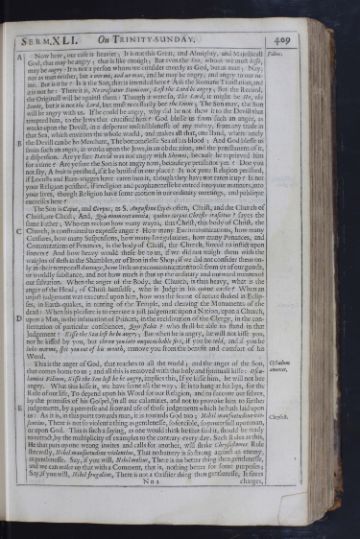 Serm.XLI.
On Trinity Sunday.
409
Serm.XLI.
On Trinity Sunday.
409
Now here, our case is heavier; It is not this Great, and Almighty, Filius. and Majesticall
God, that may be angry; that is like enough; But even the Son, whom we must kisse,
may be angry: It is not a person whom we consider meerly as God, but as man; Nay,
not as man neither, but a worme, and no man, and he may be angry, and angry to our ru-
ine. But is it he? Is it the Son, that is intended here? Ask the Romane Translation, and
it is not he: There it is, Ne irascatur Dominus, Lest the Lord be angry; But the Record,
the Originall will be against them: Though it were so, The Lord, it might be He, the
Sonne, but it is not the Lord, but must necessarily bee the Sonne; The Son may, the Son
will be angry with us. If he could be angry, why did he not shew it to the Devill that
tempted him, to the Jews that crucified him? God blesse us from such an anger, as
works upon the Devill, in a desperate unsensiblenesse of any mercy, from any trade in
that Sea, which environs the whole world, and makes all that, one Iland, where onely
the Devill can be no Merchant, The bottomelesse Sea of his blood; And God blesse us
from such an anger, as works upon the Jews, in an obduration, and the punishment of it,
a dispersion: Are ye sure David was not angry with Shimei, because he reprieved him
for a time? Are ye sure the Son is not angry now, because ye perish not yet? Doe you
not say, A fruit is perished, if it be bruised in one place? Is not your Religion perished,
if Locusts and Eare-wigges have eaten into it, though they have not eaten it up? Is not
your Religion perished, if irreligion and prophanenesse be entred into your manners, into
your lives, though Religion have some motion in our ordinary meetings, and publique
exercises here?
The Son is Caput, and Corpus, as S. Augustine sayes often, Christ, and the Church of
Christ, are Christ; And, Quis enumeret omnia, quibus corpus Christi irascitur? sayes the
same Father; Who can reckon how many wayes, this Christ, this body of Christ, the
Church, is constrained to expresse anger? How many Excommunications, how many
Censures, how many Suspensions, how many Irregularities, how many Penances, and
Commutations of Penances, is the body of Christ, the Church, forced to inflict upon
sinners? And how heavy would these be to us, if we did not waigh them with the
waights of flesh in the Shambles, or of Iron in the Shop; if we did not consider them on-
ly in their temporall damage, how little an excommunication took from us of our goods,
or worldly substance, and not how much it shut up the ordinary and outward meanes of
our salvation. When the anger of the Body, the Church, is thus heavy, what is the
anger of the Head, of Christ himselfe, who is Judge in his owne cause? When an
unjust judgement was executed upon him, how was the frame of nature shaked in Eclip-
ses, in Earth-quakes, in renting of the Temple, and cleaving the Monuments of the
dead: When his pleasure is to execute a just judgement upon a Nation, upon a Church,
upon a Man, in the infatuation of Princes, in the recidivation of the Clergy, in the con-
sternation of particular consciences, Quis stabit? who shall be able to stand in that
Judgement? Kisse the Son lest he be angry; But when he is angry, he will not kisse you,
nor be kissed by you, but throw you into unquenchable fire, if you be cold, and if you be
luke-warme, spit you out of his mouth, remove you from the benefit and comfort of his
Word.
Osculum. This is the anger of God, that reaches to all the world; and the anger of the Son,
amovet. that comes home to us; and all this is removed with this holy and spirituall kisse: Oscu-
lamini Filium, Kisse the Son lest he be angry, implies this, If ye kisse him, he will not bee
angry. What this kisse is, we have seene all the way; It is to hang at his lips, for the
Rule of our life, To depend upon his Word for our Religion, and to succour our selves,
by the promises of his Gospel, in all our calamities, and not to provoke him to farther
judgements, by a perverse and froward use of those judgements which he hath laid upon
Chrysost. us: As it is, in this point towards man, it is towards God too; Nihil mansuetudine vio-
lentius, There is not so violent a thing as gentlenesse, so forcible, so powerfull upon man,
or upon God. This is such a saying, as one would think he that said it, should be ready
to retract, by the multiplicity of examples to the contrary every day. Such Rules as this,
He that puts up one wrong invites and calls for another, will shake Chrysostomes Rule
shrewdly, Nihil mansuetudine violentius, That no battery is so strong against an enemy,
as gentlenesse. Say, if you will, Nihil melius, There is no better thing then gentlenesse,
and we can make up that with a Comment, that is, nothing better for some purposes;
Say, if you will, Nihil frugalius, There is not a thriftier thing then gentlenesse, It saves Nn2 charges,
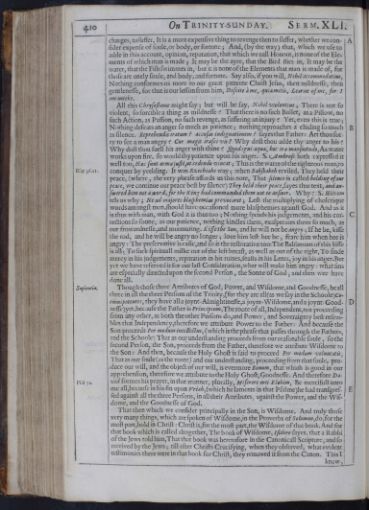 410
On Trinity Sunday.
Serm.XLI.
charges, to suffer, It is a more expensive thing to revenge then to suffer, whether we con-
410
On Trinity Sunday.
Serm.XLI.
charges, to suffer, It is a more expensive thing to revenge then to suffer, whether we con-sider expense of soule, or body, or fortune; And, (by the way) that, which we use to
adde in this account, opinion, reputation, that which we call Honour, is none of the Ele-
ments of which man is made; It may be the ayre, that the Bird flies in, It may be the
water, that the Fish swimmes in, but it is none of the Elements that man is made of, for
those are onely soule, and body, and fortune. Say also, if you will, Nihil accommodatius,
Nothing conformes us more to our great patterne Christ Jesus, then mildnesse, then
gentlenesse, for that is our lesson from him, Discite à me, quiamitis, Learne of me, for I
am meeke.
All this Chrysostome might say; but will he say, Nihil violentius, There is not so
violent, so forcible a thing as mildnesse? That there is no such Bullet, as a Pillow, no
such Action, as Passion, no such revenge, as suffering an injury? Yet, even this is true;
Nothing defeats an anger so much as patience; nothing reproaches a chiding so much
as silence. Reprehendis iratum? accusas indignationem? sayes that Father: Art thou sor-
ry to see a man angry? Cur magis irasci vis? Why dost thou adde thy anger to his?
Why dost thou fuell his anger with thine? Quodigni aqua, hoc iræ mansuetudo, As water
works upon fire, so would thy patience upon his anger. S. Ambrose hath expressed it
well too, Hæc sunt armajusti, ut cedendo vincat; This is the warre of the righteous man, to
conquer by yeelding.Esay 36.21. It was Ezechiahs way; when Rabshakeh reviled, They held their
peace, (where, the very phrase affords us this note, That silence is called holding of our
peace, we continue our peace best by silence) They held their peace, sayes that text, and an-
swered him not a word, for the King had commanded them not to answer. Why? S. Hierom
tels us why; Ne ad majores blasphemias provocaret; Lest the multiplying of cholerique
words amongst men, should have occasioned more blasphemies against God. And as it
is thus with man, with God it is thus too; Nothing spends his judgements, and his cor-
rections so soone, as our patience, nothing kindles them, exasperates them so much, as
our frowardnesse, and murmuring. Kisse the Son, and he will not be angry; If he be, kisse
the rod, and he will be angry no longer; love him lest hee be, feare him when hee is
angry: The preservative is easie, and so is the restorative too: The Balsamum of this kisse
is all; To suck spirituall milke out of the left breast, as well as out of the right, To finde
mercy in his judgements, reparation in his ruines, feasts in his Lents, joy in his anger. But
yet we have reserved it for our last Consideration, what will make him angry: what sins
are especially directed upon the second Person, the Sonne of God, and then wee have
done all.
Though those three Attributes of God, Sapientia. Power, and Wisdome, and Goodnesse, be all
three in all the three Persons of the Trinity, (for they are all (as we say in the Schoole) Co-
omnipotentes, they have all a joynt-Almightinesse, a joynt-Wisdome, and a joynt-Good-
nesse) yet, because the Father is Principium, The roote of all, Independent, not proceeding
from any other, as both the other Persons do, and Power, and Soveraignty best resem-
bles that Independency, therefore we attribute Power to the Father: And because the
Son proceeds Per modum intellectus, (which is the phrase that passes through the Fathers,
and the Schoole) That as our understanding proceeds from our reasonable soule, so the
second Person, the Son, proceeds from the Father, therefore we attribute Wisdome to
the Son: And then, because the Holy Ghost is said to proceed Per modum voluntatis,
That as our soule (as the roote) and our understanding, proceeding from that soule, pro-
duce our will, and the object of our will, is evermore Bonum, that which is good in our
apprehension, therefore we attribute to the Holy Ghost, Goodnesse. And therefore Da-
vid formes his prayer, Psal. 51. in that manner, plurally, Miserere mei Elohim, Be mercifull unto
me all, because in his sin upon Vriah, (which he laments in that Psalme) he had transgres-
sed against all the three Persons, in all their Attributes, against the Power, and the Wis-
dome, and the Goodnesse of God.
That then which we consider principally in the Son, is Wisdome. And truly those
very many things, which are spoken of Wisdome, in the Proverbs of Solomon, do, for the
most part, hold in Christ: Christ is, for the most part, the Wisdome of that book. And for
that book which is called altogether, The book of Wisdome, Isidore sayes, that a Rabbi
of the Jews told him, That that book was heretofore in the Canonicall Scripture, and so
received by the Jews; till after Christs Crucifying, when they observed, what evident
testimonies there were in that book for Christ, they removed it from the Canon. This I know,
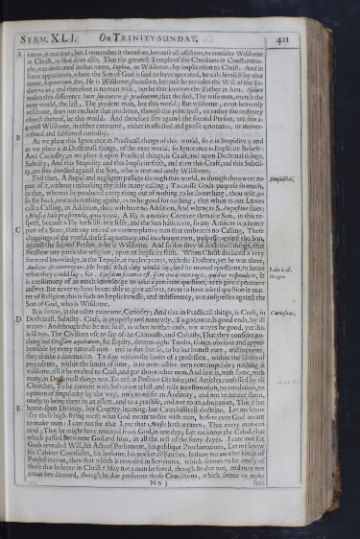 Serm. XLI.
On Trinity-sunday.
411
know, is not true; but I remember it therefore, because all assists us, to consider Wisdome
Serm. XLI.
On Trinity-sunday.
411
know, is not true; but I remember it therefore, because all assists us, to consider Wisdome
in Christ, as that does also, That the greatest Temple of the Christians in Constantino-
ple, was dedicated in that name, Sophia, to Wisdome; by implication to Christ. And in
some apparitions, where the Son of God is said to have appeared, he cals himself by that
name, Sapientiam Dei. He is Wisdome, therefore, because he reveales the Will of the Fa-
ther to us; and therefore is no man wise, but he that knowes the Father in him. Isidore
makes this difference Inter sapientem & prudentem, that the first, The wise man, attends the
next world, the last, The prudent man, but this world: But wisdome, even heavenly
wisdome, does not exclude that prudence, though the principall, or rather the ordinary
object thereof, be this world. And therefore sins against the second Person, are sins a-
gainst Wisdome, in either extreame, either in affected and grosse ignorance, or in over-
refined and sublimed curiosity.
As we place this Ignorance in Practicall things of this world, so it is Stupidity; and
as we place it in Doctrinall things, of the next world, so Ignorance is Implicite Beliefe:
And Curiosity, as we place it upon Practical things, is Craft, and upon Doctrinal things,
Subtilty; And this Stupidity and this Implicite faith, and then this Craft, and this Subtil-
ty, are sins directed against the Son, who is true and onely Wisdome.
First then, A stupid and negligent passage through this world, as though thou wert no
part of it, without embarking thy selfe in any calling; To crosse Gods purpose so much,
Stupiditas. as that, whereas he produced every thing out of nothing, to be something, thou wilt go
so far back, towards nothing againe, as to be good for nothing, that when as our Lawes
call a Calling, an Addition, thou wilt have no Addition, And when (as S. Augustine saies)
Musca Soli præferenda, quia vivit, A Fly is a nobler Creature then the Sun, in this re-
spect, because a Fly hath life in it selfe, and the Sun hath none, so any Artificer is a better
part of a State, then any retired or contemplative man that embraces no Calling, These
chippings of the world, these fragmentary and incoherent men, trespasse against the Son,
against the second Person, as he is Wisdome. And so doe they in doctrinall things, that
swallow any particular religion, upon an implicite faith. When Christ declared a very
forward knowledge, in the Temple, at twelve yeares, with the Doctors, yet he was there,
Audiens & interrogans, He heard what they would say, and he moved questions, to heare Luke 2.46.
what they could say; for, Ejusdem scientiæ est, scire quid interroges, quidve respondeas, It
is a testimony of as much knowledge to aske a pertinent question, as to give a pertinent Origen.
answer. But never to have beene able to give answer, never to have asked question in mat-
ter of Religion, this is such an Implicitenesse, and indifferency, as transgresses against the
Son of God, who is Wisdome.
It is so too, in the other extreame, Curiosity; And this in Practicall things, is Craft, Curiositas. in
Doctrinall, Subtilty. Craft, is properly and narrowly, To go towards good ends, by ill
wayes: And though this be not so ill, as when neither ends, nor wayes be good, yet this
is ill too. The Civilians use to say of the Canonists, and Casuists, That they consider no-
thing but Crassam æquitatem, fat Equity, downe-right Truths, things obvious and appre-
hensible by every naturall man: and to doe but so, to be but honest men, and no more,
they thinke a diminution. To stay within the limits of a profession, within the limits of
precedents, within the limits of time, is to over-active men contemptible; nothing is
wisdome, till it be exalted to Craft, and got above other men. And so it is, with some, with
many, in Doctrinall things too. To rest in Positive Divinity, and Articles confessed by all
Churches, To be content with Salvation at last, and raise no estimation, no emulation, no
opinion of singularity by the way, only to edifie an Auditory, and not to amaze them,
onely to bring them to an assent, and to a practise, and not to an admiration, This is but
home-spun Divinity, but Country-learning, but Catechisticall doctrine. Let me know
(say these high-flying men) what God meant to doe with man, before ever God meant
to make man: I care not for that Law that Moses hath written; That every man can
read; That he might have received from God, in one day; Let me know the Cabal, that
which passed betweene God and him, in all the rest of the forty dayes. I care not for
Gods revealed Will, his Acts of Parliament, his publique Proclamations, Let me know
his Cabinet Counsailes, his bosome, his pocket dispatches. Is there not another kinde of
Predestination, then that which is revealed in Scriptures, which seemes to be onely of
those that beleeve in Christ? May not a man be saved, though he doe not, and may not
a man bee damned, though he doe performe those Conditions, which seeme to make Nn3 sure
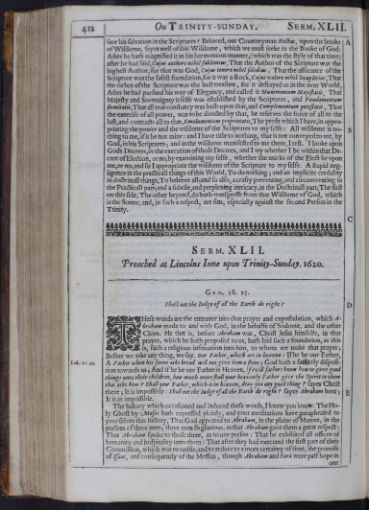 412
On Trinity - Sunday.
Serm. XLII.
sure his salvation in the Scriptures? Beloved, our Countrey man Holkot, upon the booke
412
On Trinity - Sunday.
Serm. XLII.
sure his salvation in the Scriptures? Beloved, our Countrey man Holkot, upon the booke
of Wisdome, sayes well of this Wisdome, which we must seeke in the Booke of God:
After he hath magnified it in his harmonious manner, (which was the style of that time)
after he had said, Cujus authore nihil sublimius, That the Author of the Scripture was the
highest Author, for that was God, Cujus tenore nihil solidius, That the assurance of the
Scripture was the safest foundation, for it was a Rock, Cujus valore nihil locupletius, That
the riches of the Scripture was the best treasure, for it defrayed us in the next World,
After he had pursued his way of Elegancy, and called it Munimentum Majestatis, That
Majesty and Soveraignty it selfe was established by the Scriptures, and Fundamentum
firmitatis, That all true constancy was built upon that, and Complementum potestatis, That
the exercise of all power, was to be directed by that, he reserves the force of all to the
last, and contracts all to that, Emolumentum proprietatis, The profit which I have, in appro-
priating the power and the wisdome of the Scriptures to my selfe: All wisdome is no-
thing to me, if it be not mine: and I have title to nothing, that is not conveyed to me, by
God, in his Scriptures; and in the wisdome manifested to me there, I rest. I looke upon
Gods Decrees, in the execution of those Decrees, and I try whether I be within that De-
cree of Election, or no, by examining my selfe, whether the marks of the Elect be upon
me, or no, and so I appropriate the wisdome of the Scripture to my selfe. A stupid neg-
ligence in the practicall things of this World, To do nothing; and an implicite credulity
in doctrinall things, To beleeve all; and so also, a crafty preventing, and circumventing in
the Practicall part; and a subtile, and perplexing intricacy, in the Doctrinall part; The first
on this side, The other beyond, do both transgresse from that Wisdome of God, which
is the Sonne, and, in such a respect, are sins, especially against the second Person in the
Trinity.
Serm. XLII.
Preached at Lincolns Inne upon Trinity-Sunday. 1620.
Gen. 18.25.
Shall not the Iudge of all the Earth do right?
THeseThese words are the entrance into that prayer and expostulation, which A-
braham made to and with God, in the behalfe of Sodome, and the other
Cities. He that is, before Abraham was, Christ Jesus himselfe, in that
prayer, which he hath proposed to us, hath laid such a foundation, as this
is, such a religious insinuation into him, to whom we make that prayer;
Before we aske any thing, we say. Our Father, which art in heaven: If he be our Father,
A Father when his sonne asks bread will not give him a stone;Luk. 11.12. God hath a fatherly disposi-
tion towards us; And if he be our Father in Heaven, If evill fathers know how to give good
things unto their children, how much more shall your heavenly Father give the Spirit to them
that aske him? Shall your Father, which is in heaven, deny you any good thing? sayes Christ
there; It is impossible: Shall not the Iudge of all the Earth do right? sayes Abraham here;
It is as impossible.
The history which occasioned and induced these words, I know you know. The Ho-
ly Ghost by Moses hath expressed plainly, and your meditations have paraphrased to
yourselves this history, That God appeared to Abraham, in the plaine of Mamre, in the
persons of three men; three men so glorious, as that Abraham gave them a great respect:
That Abraham spoke to those three, as to one person: That he exhibited all offices of
humanity and hospitality unto them: That after they had executed the first part of their
Commission, which was to ratifie, and to reduce to a more certainty of time, the promise
of Isaac, and consequently of the Messias, though Abraham and Sara were past hope in one
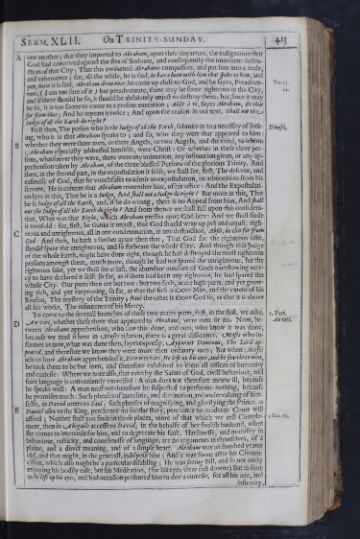 Serm. XLII.
On Trinity-sunday.
413
one another; that they imparted to Abraham, upon their departure, the indignation that
Serm. XLII.
On Trinity-sunday.
413
one another; that they imparted to Abraham, upon their departure, the indignation that
God had conceived against the sins of Sodome, and consequently the imminent destru-
ction of that City; That this awakened Abrahams compassion, and put him into a zeale,
and vehemence; for, all the while, he is said, to have been with him that spoke to him, and
yet, now it is said, Abraham drew near, he came up close to God, and he sayes, Ver. 23.
24. Peradven-
ture, (I am not sure of it) but peradventure, there may be some righteous in the City,
and if there should be so, it should be absolutely unjust to destroy them; but, since it may
be so, it is too soone to come to a present execution; Absit a te, sayes Abraham, Be that
far from thee; And he repeats it twice; And upon the reason in our text, Shall not the
iudge of all the Earth do right?
First then, The person who is the Iudge of all the Earth, submits us to a necessity of Divisio. seek-
ing, who it is that Abraham speaks to; and so, who they were that appeared to him:
whether they were three men, or three Angels, or two Angels, and the third, to whom
Abraham especially addressed himselfe, were Christ: Or whether in these three per-
sons, whatsoever they were, there were any intimation, any insinuation given, or any ap-
prehension taken by Abraham, of the three blessed Persons of the glorious Trinity. And
then, in the second part, in the expostulation it selfe, we shall see, first, The descent, and
easinesse of God, that he vouchfafesvouchsafes to admit an expostulation, an admonition from his
servant, He is content that Abraham remember him, of his office: And the Expostulati-
on lyes in this, That he is a Iudge, And shall not a Iudge do right? But more in this, That
he is Iudge of all the Earth, and, if he do wrong, there is no Appeal from him, And shall
not the Iudge of all the Earth do right? And from thence we shall fall upon this considera-
tion, What was that Right, which Abraham presses upon God here: And we shall finde
it twofold: for, first, he thinks it unjust, that God should wrap up just and unjust, righ-
teous and unrighteous, all in one condemnation, in one destruction, Absit, be this far from
God: And then, he hath a farther ayme then that, That God for the righteous sake,
should spare the unrighteous, and so forbeare the whole City. And though this Judge
of the whole Earth, might have done right, though he had destroyed the most righteous
persons amongst them, much more, though he had not spared the unrighteous, for the
righteous sake, yet we shall see at last, the abundant measure of Gods overflowing mer-
cy to have declared it selfe so far, as if there had been any righteous, he had spared the
whole City. Our parts then are but two: but two such, as are high parts, and yet grow-
ing rich, and yet emproving, so far, as that the first is above Man, and the extent of his
Reason, The mystery of the Trinity; And the other is above God so, as that it is above
all his works, The infinitenes of his Mercy.
To come to the severall branches of these two maine parts, first, in the first, we aske, 1. Part.
An viri, whether these three that appeared to Abraham, were men or no. Now, An viri. be-
tween Abrahams apprehension, who saw this done, and ours, who know it was done,
because we read it here in Moses relation, there is a great difference. Moses who in-
formes us now, what was done then, sayes expresly, Apparuit Dominus, The Lord ap-
peared, and therefore we know they were more then ordinary men; But when Moses
tels us how Abraham apprehended it, Ecce tres viri, He lift up his eyes, and he saw three men,
he took them to be but men, and therefore exhibited to them all offices of humanity
and curtesie: Where we note also, that even by the Saints of God, civill behaviour, and
faire language is conveniently exercised: A man does not therefore meane ill, because
he speaks well: A man must not therefore be suspected to performe nothing, because
he promises much: Such phrases of humilitie, and diminution, and undervaluing of him-
selfe, as David utters to Saul; such phrases of magnifying, and glorifying the Prince, as
Daniel uses to the King, perchance no secular story, perchance no moderne Court will
afford; Neither shall you finde in those places, more of that which we call 1 Sam. 25. Comple-
ment, then in Abigails accesse to David, in the behalfe of her foolish husband, when
she comes to intercede for him, and to deprecate his fault. Harshnesse, and morosity in
behaviour, rusticity, and coorsenesse of language, are no arguments in themselves, of a
plaine, and a direct meaning, and of a simple heart. Abraham was an hundred yeares
old, and that might, in the generall, indispose him; And it was soone after his Circum-
cision, which also might be a particular disabling; He was sitting still, and so not onely
enjoying his bodily ease, but his Meditation, (for his eyes were cast downe) But as soon
as he lift up his eyes, and had occasion presented him to doe a curtesie, for all his age, and infirmity,
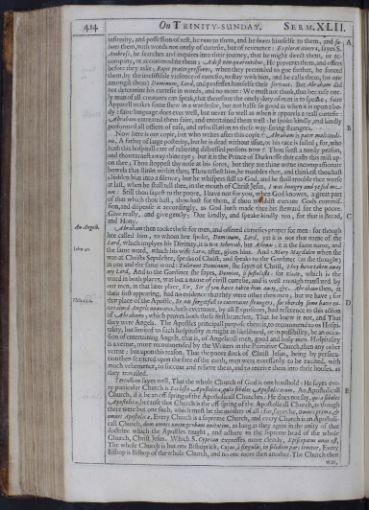 414
On Trinity-sunday.
Serm. XLII.
infirmity, and possession of rest, he runs to them, and he bowes himselfe to them, and sa-
414
On Trinity-sunday.
Serm. XLII.
infirmity, and possession of rest, he runs to them, and he bowes himselfe to them, and sa-lutes them, with words not onely of curtesie, but of reverence: Explorat itinera, sayes S.
Ambrose, he searches and inquires into their journey, that he might direct them, or ac-
company, or accommodate them; A dest non quærentibus, He prevents them, and offers
before they aske; Rapit prætergressuros, when they pretended to goe farther, he forced
them, by the irresistible violence of curtesie, to stay with him, and he calls them, (or one
amongst them) Dominum, Lord, and professes himselfe their servant. But Abraham did
not determine his curtesie in words, and no more: We must not think, that because one-
ly man of all creatures can speak, that therefore the onely duty of man is to speake; faire
Apparell makes some shew in a wardrobe, but not halfe so good as when it is upon a bo-
dy: faire language does ever well, but never so well as when it apparels a reall curtesie:
Abraham entreated them faire, and entertained them well: he spoke kindly, and kindly
performed all offices of ease, and refocillation to these way-faring strangers.
Now here is our copie, but who writes after this copie? Abraham is pater multitudi-
nis, A father of large posterity, but he is dead without issue, or his race is failed; for, who
hath this hospitall care of relieving distressed persons now? Thou seest a needy person,
and thou turnest away thine eye; but it is the Prince of Darknesse that casts this mist up-
on thee; Thou stoppest thy nose at his sores, but they are thine owne incompassionate
bowels that stinke within thee; Thou tellest him, he troubles thee, and thinkest thou hast
chidden him into a silence; but he whispers still to God, and he shall trouble thee worse
at last, when he shall tell thee, in the mouth of Christ Jesus, I was hungry and ye fed me
not: Still thou sayest to the poore, I have not for you, when God knowes, a great part
of that which thou hast, thou hast for them, if thou wouldst execute Gods commis-
sion, and dispense it accordingly, as God hath made thee his steward for the poore.
Give really, and give gently; Doe kindly, and speake kindly too, for that is Bread,
and Hony.
Abraham then tooke these for men, An Angeli. and offered curtesies proper for men: for though
hee called him, to whom hee spoke, Dominum, Lord, yet it is not that name of the
Lord, which implyes his Divinity, it is not Iehovah, but Adonai; it is the same name, and
the same word, Iohn 20. which his wife Sara, after, gives him. And Mary Magdalen when she
was at Christs Sepulchre, speaks of Christ, and speaks to the Gardiner (as she thought)
in one and the same word: Tulerunt Dominum, she sayes of Christ, They have taken away
my Lord, And to the Gardiner she sayes, Domine, si sustulisti: for Κύριος, which is the
word in both places, was but a name of civill curtesie, and is well enough translated by
our men, in that later place, Sir, Sir if you have taken him away, &c. Abraham then, at
their first appearing, had no evidence that they were other then men; but we have; for
that place of the Apostle, Heb. 13.2. Be not forgetfull to entertaine strangers, for thereby some have en-
tertained Angels unawares, hath evermore, by all Expositors, had reference to this action
of Abrahams; which proves both these first branches, That he knew it not, and That
they were Angels. The Apostles principall purpose there is, to recommend to us Hospi-
tality, but limited to such hospitality as might in likelihood, or in possibility, be an occa-
sion of entertaining Angels, that is, of Angelicall men, good and holy men. Hospitality
is a vertue, more recommended by the Writers in the Primitive Church, then any other
vertue: but upon this reason, That the poore flock of Christ Jesus, being by persecu-
tion then scattered upon the face of the earth, men were necessarily to be excited, with
much vehemence, to succour and relieve them, and to receive them into their houses, as
they travailed.
Tertullian sayes well, That the whole Church of God is one houshold: He sayes eve-
ry particular Church is Ecclesia Apostolica, quia soboles Apostolicarum, An Apostolicall
Church, if it be an off-spring of the Apostolicall Churches: He does not say, quia soboles
Apostolicæ, because that Church is the off-spring of the Apostolicall Church, as though
there were but one such, which must be the mother of all: for, sayes he, Omnes primæ, &
omnes Apostolicæ, Every Church is a supreme Church, and every Church is an Apostoli-
call Church, dum omnes unam probant unitatem, as long as they agree in the unity of that
doctrine which the Apostles taught, and adhere to the supreme head of the whole
Church, Christ Jesus. Which S. Cyprian expresses more clearly, Episcopatus unus est,
The whole Church is but one Bishoprick, Cujus, à singulis, in solidum pars tenetur, Every
Bishop is Bishop of the whole Church, and no one more then another. The Church then was,
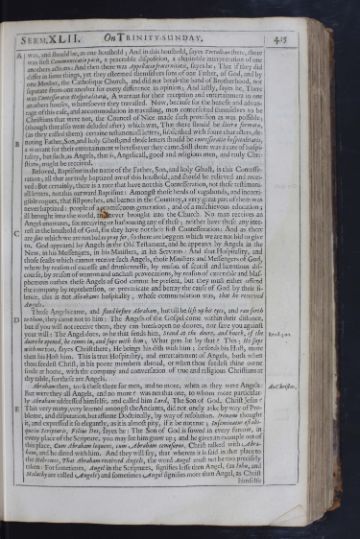 Serm. XLII.
On Trinity-sunday.
415
was, and should be, as one houshold; And in this houshold, sayes Tertullian there, there
Serm. XLII.
On Trinity-sunday.
415
was, and should be, as one houshold; And in this houshold, sayes Tertullian there, there
was first Communicatio pacis, a peaceable disposition, a charitable interpretation of one
anothers actions: And then there was Appellatio fraternitatis, sayes he; That if they did
differ in some things, yet they esteemed themselves sons of one Father, of God, and by
one Mother, the Catholique Church, and did not break the band of Brotherhood, nor
separate from one another for every difference in opinion; And lastly, sayes he, There
was Contesseratio Hospitalitatis, A warrant for their reception and entertainment in one
anothers houses, wheresoever they travailed. Now, because for the benefit and advan-
tage of this ease, and accommodation in travailing, men conterfeited themselves to be
Christians that were not, the Councel of Nice made such provision as was possible;
(though that also were deluded after) which was, That there should be literæ formatæ,
(as they called them) certaine testimoniall letters, subscribed with foure characters, de-
noting Father, Son, and holy Ghost; and those letters should be contesseratio hospitalitatis,
a warrant for their entertainment wheresoever they came. Still there was a care of hospi-
tality, but such, as Angels, that is, Angelicall, good and religious men, and truly Chri-
stians, might be received.
Beloved, Baptisme in the name of the Father, Son, and holy Ghost, is this Contesse-
ration; all that are truly baptized are of this houshold, and should be relieved and recei-
ved: But certainly, there is a race that have not this Contesseration, not these testimoni-
all letters, not this outward Baptisme: Amongst those herds of vagabonds, and incorri-
gible rogues, that fill porches, and barnes in the Countrey, a very great part of them was
never baptized: people of a promiscuous generation, and of a mischievous education;
ill brought into the world, and never brought into the Church. No man receives an
Angel unawares, for receiving or harbouring any of these; neither have these any inte-
rest in the houshold of God, for they have not their first Contesseration: And as there
are sins which we are not bid to pray for, so there are beggers which we are not bid to give
to. God appeared by Angels in the Old Testament, and he appeares by Angels in the
New, in his Messengers, in his Ministers, in his Servants: And that Hospitality, and
those feasts which cannot receive such Angels, those Ministers and Messengers of God,
where by reason of excesse and drunkennesse, by reason of scurril and licentious dis-
course, by reason of wanton and unchast provocations, by reason of execrable and blas-
phemous oathes these Angels of God cannot be present, but they must either offend
the company by reprehension, or prevaricate and betray the cause of God by their si-
lence, this is not Abrahams hospitality, whose commendation was, that he received
Angels.
Those Angels came, and stood before Abraham, but till he lift up his eyes, and ran forth
to them, they came not to him: The Angels of the Gospel come within their distance,
but if you will not receive them, they can break open no doores, nor save you against
your will: The Angel does, as he that sends him, Stand at the doore, and knock,Revel. 3.20. if the
doore be opened, he comes in, and sups with him; What gets he by that? This; He sups
with me too, sayes Christ there; He brings his dish with him; he feeds his Host, more
then his Host him. This is true Hospitality, and entertainment of Angels, both when
thou feedest Christ, in his poore members abroad, or when thou feedest thine owne
soule at home, with the company and conversation of true and religious Christians at
thy table, for these are Angels.
Abraham then, took these three for men, and no more, when as they were Angels: An Christus.
But were they all Angels, and no more? was not that one, to whom more particular-
ly Abraham addressed himselfe, and called him Lord, The Son of God, Christ Jesus?
This very many, very learned amongst the Ancients, did not onely aske by way of Pro-
bleme, and disputation, but affirme Doctrinally, by way of resolution. Irenæus thought
it, and expressed it so elegantly, as it is almost pity, if it be not true; Inseminatus est ubi-
que in Scripturis, Filius Dei, sayes he: The Son of God is sowed in every furrow, in
every place of the Scripture, you may see him grow up; and he gives an example out of
this place, Cum Abraham loquens, cum Abraham comesurus, Christ talked with Abra-
ham, and he dined with him. And they will say, that whereas it is said in that place to
the Hebrewes, That Abraham received Angels, the word Angel must not be too precisely
taken: For sometimes, Angel in the Scriptures, signifies lesse then Angel, (as Iohn, and
Malachy are called Angels) and sometimes Angel signifies more then Angel, as Christ himselfe
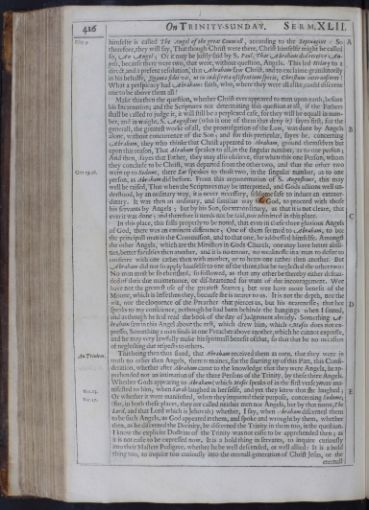 Serm. XLII.
On Trinity-sunday.
416
Esay 9.
himselfe is called The Angel of the great Councell, according to the Septuagint: So
Serm. XLII.
On Trinity-sunday.
416
Esay 9.
himselfe is called The Angel of the great Councell, according to the Septuagint: So
therefore, they will say, That though Christ were there, Christ himselfe might be called
so, An Angel; Or it may be justly said by S. Paul, That Abraham did receive An-
gels, because there were two, that were, without question, Angels. This led Hilary to a
direct, and a present resolution, that Abraham saw Christ, and to exclaime gratulatorily
in his behalfe, Quanta fidei vis, ut in indiscreta assistentium specie, Christum internosceret!
What a perspicacy had Abrahams faith, who, where they were all alike, could discerne
one to be above them all! Make this then the question, whether Christ ever appeared to men upon earth, before
his Incarnation; and the Scriptures not determining this question at all, if the Fathers
shall be called to judge it, it will still be a perplexed case, for they will be equall in num-
ber, and in waight. S. Augustine (who is one of them that deny it) sayes first, for the
generall, the greatest worke of all, the promulgation of the Law, was done by Angels
alone, without concurrence of the Son; and for this particular, sayes he, concerning
Abraham, they who thinke that Christ appeared to Abraham, ground themselves but
upon this reason, That Abraham speakes to all, in the singular number, as to one person;
And then, sayes that Father, they may also observe, that when this one Person, whom
they conclude to be Christ, was departed from the other two, and that the other two
went up to Sodome,Gen 19.18. there Lot speakes to those two, in the singular number, as to one
person, as Abraham did before. From this argumentation of S. Augustines, this may
well be raised, That when the Scriptures may be interpreted, and Gods actions well un-
derstood, by an ordinary way, it is never necessary, seldome safe to induce an extraor-
dinary. It was then an ordinary, and familiar way for God, to proceed with those
his servants by Angels; but by his Son, so extraordinary, as that it is not cleare, that
ever it was done; and therefore it needs not be said, nor admitted in this place.
In this place, this falls properly to be noted, that even in these three glorious Angels
of God, there was an eminent difference; One of them seemed to Abraham, to bee
the principall man in the Commission, and to that one, he addressed himselfe. Amongst
the other Angels, which are the Ministers in Gods Church, one may have better abili-
ties, better faculties then another, and it is no errour, no weaknesse in a man to desire to
conferre with one rather then with another, or to heare one rather then another. But
Abraham did not so apply himselfe to one of the three, that he neglected the other two:
No man must be so cherished, so followed, as that any other be thereby either defrau-
ded of their due maintenance, or dis-heartened for want of due incouragement. Wee
have not the greatest use of the greatest Starres; but wee have more benefit of the
Moone, which is lesse then they, because she is nearer to us. It is not the depth, nor the
wit, nor the eloquence of the Preacher that pierces us, but his nearenesse; that hee
speaks to my conscience, as though he had been behinde the hangings when I sinned,
and as though he had read the book of the day of Judgement already. Something A-
braham saw in this Angel above the rest, which drew him, which Moses does not ex-
presse; Something a man finds in one Preacher above another, which he cannot expresse,
and he may very lawfully make his spirituall benefit of that, so that that be no occasion
of neglecting due respects to others.
This being then thus fixed, An Trinitas. that Abraham received them as men, that they were in
truth no other then Angels, there remaines, for the shutting up of this Part, this Consi-
deration, whether after Abraham came to the knowledge that they were Angels, he ap-
prehended not an intimation of the three Persons of the Trinity, by these three Angels.
Whether Gods appearing to Abraham (which Moses speaks of in the first verse) were ma-
nifested to him, Ver. 13. when Sarah laughed in her selfe, and yet they knew that she laughed;
Ver. 17. Or whether it were manifested, when they imparted their purpose, concerning Sodome;
(for, in both these places, they are called neither men nor Angels, but by that name, The
Lord, and that Lord which is Jehovah) whether, I say, when Abraham discerned them
to be such Angels, as God appeared in them, and spoke and wrought by them, whether
then, as he discerned the Divinity, he discerned the Trinity in them too, is the question.
I know the explicite Doctrine of the Trinity was not easie to be apprehended then; as
it is not easie to be expressed now. It is a bold thing in servants, to inquire curiously
into their Masters Pedigree, whether he be well descended, or well allied: It is a bold
thing too, to inquire too curiously into the eternall generation of Christ Jesus, or the eternall
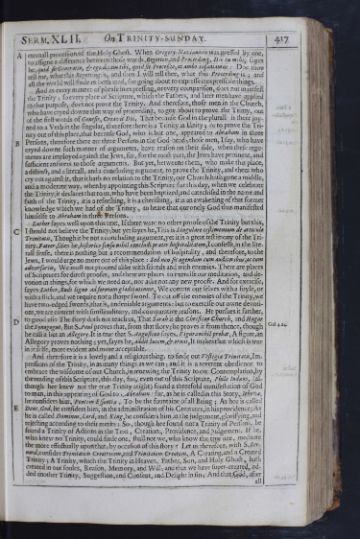 Serm. XLII.
On Trinity-sunday.
417
eternall procession of the Holy Ghost. When Gregory Nazianzen was pressed by one,
Serm. XLII.
On Trinity-sunday.
417
eternall procession of the Holy Ghost. When Gregory Nazianzen was pressed by one,
to assigne a difference between those words, Begotten, and Proceeding, Dic tu mihi, sayes
he, quid sit Generatie, & ego dicam tibi, quid sit Processio, ut ambo insaniamus: Doe thou
tell me, what this Begetting is, and then I will tell thee, what this Proceeding is; and
all the world will finde us both mad, for going about to expresse inexpressible things.
And as every manner of phrase in expressing, or every comparison, does not manifest
the Trinity; so every place of Scripture, which the Fathers, and later men have applied
to that purpose, does not prove the Trinity. And therefore, those men in the Church,
who have cryed downe that way of proceeding, to goe about to prove the Trinty, out
of the first words of Genesis, Creavit Dii, That because God in the plurall is there joy-
ned to a Verb in the singular, therefore there is a Trinity in Unity; or to prove the Tri-
nity out of this place, that because God, who is but one, appeared to Abraham in three
Persons, therefore there are three Persons in the God-head; those men, I say, who have
cryed downe such manner of arguments, have reason on their side, when these argu-
ments are imployed against the Jews, for, for the most part, the Jews have pertinent, and
sufficient answers to those arguments. But yet, betweene them, who make this place,
a distinct, and a literall, and a concluding argument, to prove the Trinity, and them who
cry out against it, that it hath no relation to the Trinity, our Church hath gone a middle,
and a moderate way, when by appointing this Scripture for this day, when we celebrate
the Trinity, it declares that to us, who have been baptized, and catechised in the name and
faith of the Trinity, it is a refreshing, it is a cherishing, it is an awakening of that former
knowledge which we had of the Trinity, to heare that our onely God thus manifested
himselfe to Abraham in three Persons.
Luther sayes well upon this text, If there were no other proofe of the Trinity but this,
I should not believe the Trinity; but yet sayes he, This is Singulare testimonium de articulo
Trinitatis, Though it be not a concluding argument, yet it is a great testimony of the Tri-
nity. Fateor, saies he, historico sensu nihil concludi præter hospitalitatem, I confesse, in the lite-
rall sense, there is nothing but a recommendation of hospitality, and therefore, to the
Jews, I would urge no more out of this place: Sed non sic agendum cum auditoribus, ac cum
adversariis, We must not proceed alike with friends and with enemies. There are places
of Scriptures for direct proofes, and there are places to exercise our meditation, and de-
votion in things, for which we need not, nor aske not any new proofe. And for exercise,
sayes Luther, Rudi ligno ad formam gladii utimur, We content our selves with a foyle, or
with a stick, and we require not a sharpe sword. To cut off the enemies of the Trinity, we
have two-edged swords, that is, undeniable arguments: but to exercise our owne devoti-
ons, we are content with similitudinary, and comparative reasons. He pursues it farther,
to good use: The story doth not teach us, That Sarah is the Christian Church, and Hagar
the Synagogue; But S. Paul proves that, from that story; he proves it from thence, Gal. 4.24. though
he call it but an Allegory. It is true that S. Augustine sayes Figuranihil probat, A figure, an
Allegory proves nothing; yet, sayes he, addit lucem, & ornat, It makes that which is true
in it selfe, more evident and more acceptable.
And therefore it is a lovely and a religious thing, to finde out Vestigia Trinitatis, Im-
pressions of the Trinity, in as many things as we can; and it is a reverent obedience to
embrace the wisdome of our Church, in renewing the Trinity to our Contemplation, by
the reading of this Scripture, this day, for, even out of this Scripture, Philo Iudæus, (al-
though hee knew not the true Trinity aright) found a threefold manifestation of God
to man, in this appearing of God to Abraham: for, as he is called in this Story, Iehova,
he considers him, Fontem Essentiæ, To be the fountaine of all Being; As hee is called
Deus, God, he considers him, in the administration of his Creatures, in his providence; As
he is called Dominus, Lord, and King, he considers him in the judgement, glorifying, and
rejecting according to their merits: So, though hee found not a Trinity of Persons, he
found a Trinity of Actions in the Text, Creation, Providence, and Judgement. If he,
who knew no Trinity, could finde one, shall not we, who know the true one, meditate
the more effectually upon that, by occasion of this story? Let us therefore, with S. Ber-
nard, consider Trinitatem Creatricem, and Trinitatem Creatam, A Creating, and a Created
Trinity; A Trinity, which the Trinity in Heaven, Father, Son, and Holy Ghost, hath
created in our soules, Reason, Memory, and Will; and that we have super-created, ad-
ded another Trinity, Suggestion, and Consent, and Delight in sin; And that God, after all
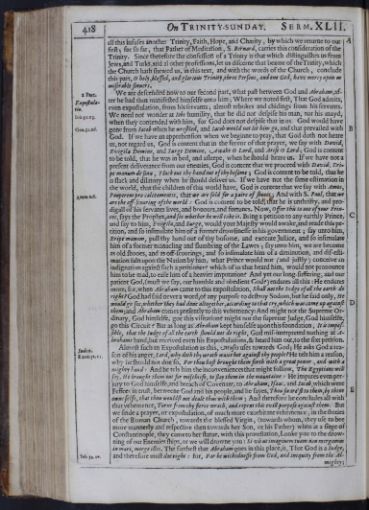 Serm. XLII.
On Trinity-sunday.
418
all this infuses another Trinity, Faith, Hope, and Charity, by which we returne to our
Serm. XLII.
On Trinity-sunday.
418
all this infuses another Trinity, Faith, Hope, and Charity, by which we returne to our
first; for so far, that Father of Meditation, S. Bernard, carries this consideration of the
Trinity. Since therefore the confession of a Trinity is that which distinguishes us from
Jews, and Turks, and al other professions, let us discerne that beame of the Trinity, which
the Church hath shewed us, in this text, and with the words of the Church, conclude
this part, O holy, blessed, and glorious Trinity, three Persons, and one God, have mercy upon us
miserable sinners.
We are descended now to our second part, 2 Part. what past between God and Abraham, Expostula-
tio. af-
ter he had thus manifested himselfe unto him; Where we noted first, That God admits,
even expostulation, from his servants; almost rebukes and chidings from his servants.
Iob 31.13. We need not wonder at Iobs humility, that he did not despise his man, nor his mayd,
when they contended with him, for God does not despise that in us. God would have
gone from Iacob when he wrestled,Gen. 32.26. and Iacob would not let him go, and that prevailed with
God. If we have an apprehension when we beginne to pray, that God doth not heare
us, not regard us, God is content that in the fervor of that prayer, we say with David,
Evigila Domine, and Surge Domine, Awake O Lord, and Arise O Lord; God is content
to be told, that he was in bed, and asleepe, when he should heare us. If we have not a
present deliverance from our enemies, God is content that we proceed with David, Eri-
pe manum de sinu, Pluck out thy hand out of thy bosome; God is content to be told, that he
is slack and dilatory when he should deliver us. If we have not the same estimation in
the world, that the children of this world have, God is content that we say with Amos,
Pauperem pro calceamentis, Amos 2.6. that we are sold for a paire of shooes; And with S. Paul, that we
are the off-scouring of the world: God is content to be told, that he is unthrifty, and pro-
digall of his servants lives, and honours, and fortunes. Now, Offer this to one of your Prin-
ces, says the Prophet, and see whether he will take it. Bring a petition to any earthly Prince,
and say to him, Evigila, and Surge, would your Majesty would awake, and reade this pe-
tition, and so insimulate him of a former drowsinesse in his government; say unto him,
Eripe manum, pull thy hand out of thy bosome, and execute Justice, and so insimulate
him of a former manacling and slumbring of the Lawes; say unto him, we are become
as old shooes, and as off-scourings, and so insimulate him of a diminution, and dis-esti-
mation faln upon the Nation by him, what Prince would not (and justly) conceive an
indignation against such a petitioner? which of us that heard him, would not pronounce
him to be mad, to ease him of a heavier imputation? And yet our long-suffering, and our
patient God, (must we say, our humble and obedient God?) endures all this: He endures
more; for, when Abraham came to this expostulation, Shall not the Iudge of all the earth do
right? God had said never a word, of any purpose to destroy Sodom, but he said only, He
would go see, whether they had done altogether, according to that cry, which was come up against
them; and Abraham comes presently to this vehemency: And might not the Supreme Or-
dinary, God himselfe, goe this visitation? might not the supreme Judge, God himselfe,
go this Circuit? But as long as Abraham kept himselfe upon this foundation, It is impos-
sible, that the Iudge of all the earth should not do right, God mis-interpreted nothing at A-
brahams hand, but received even his Expostulations, & heard him out, to the sixt petition.
Iudex. Almost such an Expostulation as this, Moses uses towards God; He asks God a rea-
son of his anger, Exod. 32.11. Lord, why doth thy wrath waxe hot against thy people? He tels him a reason,
why he should not doe so, For thou hast brought them forth with a great power, and with a
mighty hand: And he tels him the inconveniences that might follow, The Egyptians will
say, He brought them out for mischiefe, to slay them in the mountaine: He imputes even per-
jury to God himselfe, and breach of Covenant, to Abraham, Isaac, and Iacob, which were
Feffees in trust, betweene God and his people, and he sayes, Thou sware'st to them, by thine
owne selfe, that thou wouldst not deale thus with them; And therefore he concludes all with
that vehemence, Turne from thy fierce wrath, and repent this evill purpose against them. But
we finde a prayer, or expostulation, of much more exorbitant vehemence, in the stories
of the Roman Church, towards the blessed Virgin, (towards whom, they use to bee
more mannerly and respective then towards her Son, or his Father) when at a siege of
Constantinople, they came to her statue, with this protestation, Looke you to the drow-
ning of our Enemies ships, or we will drowne you: Si vis ut imaginem tuam non mergamus
in mari, merge illos. The farthest that Abraham goes in this place, is, That God is a Iudge,
and therefore must doe right:Iob 32.10. for, Far be wickednesse from God, and iniquity from the Al-
mighty;
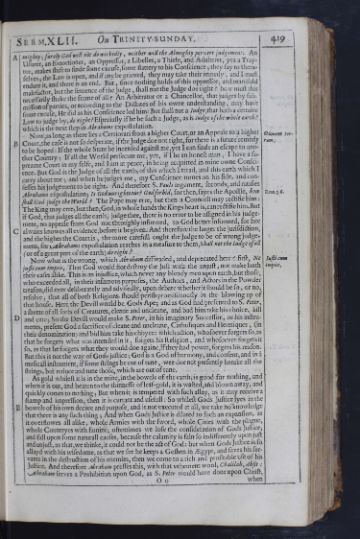 Serm. XLII.
On Trinity-sunday.
419
mighty; surely God will not do wickedly, neither will the Almighty pervert judgement. An
Serm. XLII.
On Trinity-sunday.
419
mighty; surely God will not do wickedly, neither will the Almighty pervert judgement. An
Usurer, an Extortioner, an Oppressor, a Libeller, a Thiefe, and Adulterer, yea a Tray-
tor, makes shift to finde some excuse, some flattery to his Conscience; they say to them-
selves; the Law is open, and if any be grieved, they may take their remedy, and I must
endure it, and there is an end. But, since nothing holds of this oppressor, and manifold
malefactor, but the sentence of the Judge, shall not the Judge doe right? how must this
necessarily shake the frame of all? An Arbitrator or a Chancellor, that judges by sub-
mission of parties, or according to the Dictates of his owne understanding, may have
some excuse, He did as his Conscience led him: But shall not a Iudge, that hath a certaine
Law to judge by, do right? Especially if he be such a Judge, as is Iudge of the whole earth?
which is the next step in Abrahams expostulation.
Now, as long as there lies a Certiorari from a higher Court, Omnem ter-
ram. or an Appeale to a higher
Court, the case is not so desperate, if the Judge doe not right, for there is a future remedy
to be hoped: If the whole State be incensed against me, yet I can finde an escape to ano-
ther Country; If all the World persecute me, yet, if I be an honest man, I have a su-
preame Court in my selfe, and I am at peace, in being acquitted in mine owne Consci-
ence. But God is the Judge of all the earth; of this which I tread, and this earth which I
carry about me; and when he judges me, my Conscience turnes on his side, and con-
fesses his judgement to be right. And therefore S. Pauls argument, seconds, and ratifies
Abrahams expostulation; Is God unrighteous? God forbid; for then, sayes the Apostle, Rom. 3.6. how
shall God judge the World? The Pope may erre, but then a Councell may rectifie him:
The King may erre; but then, God, in whose hands the Kings heart is, can rectifie him. But
if God, that judges all the earth, judge thee, there is no error to be assigned in his judge-
ment, no appeale from God not throughly informed, to God better informed, for hee
alwaies knowes all evidence, before it be given. And therefore the larger the jurisdiction,
and the higher the Court is, the more carefull ought the Judge to be of wrong judge-
ment; for Abrahams expostulation reaches in a measure to them, Shall not the Iudge of all
(or of a great part of the earth) do right?
Now what is the wrong, which Abraham disswaded, and deprecated here? first, Iusti cum
impiis. Ne
justi cum impiis, That God would not destroy the Just with the unjust, not make both
their cases alike. This is an injustice, which never any bloody men upon earth, but those,
who exceeded all, in their infamous purposes, the Authors, and Actors in the Powder
treason, did ever deliberately and advisedly, upon debate whether it should be so, or no,
resolve, that all of both Religions should perish promiscuously in the blowing up of
that house. Here the Devill would be Gods Ape; and as God had presented to S. Peter,
a sheete of all sorts of Creatures, cleane and uncleane, and bad him take his choice, kill
and eate; So the Devill would make S. Peter, in his imaginary Successor, or his instru-
ments, present God a sacrifice of cleane and uncleane, Catholiques and Heretiques, (in
their denomination) and bid him take his choyce: which action, whosoever forgets so, as
that he forgets what was intended in it, forgets his Religion, and whosoever forgets it
so, as that he forgets what they would doe againe, if they had power, forgets his reason.
But this is not the way of Gods justice; God is a God of harmony, and consent, and in
a musicall instrument, if some strings be out of tune, wee doe not presently breake all the
strings, but reduce and tune those, which are out of tune.
As gold whilest it is in the mine, in the bowels of the earth, is good for nothing, and
when it is out, and beaten to the thinnesse of leaf-gold, it is wasted, and blown away, and
quickly comes to nothing; But when it is tempered with such allay, as it may receive a
stamp and impression, then it is currant and usefull: So whilest Gods Justice lyes in the
bowels of his own decree and purpose, and is not executed at all, we take no knowledge
that there is any such thing; And when Gods Justice is dilated to such an expansion, as
it overflowes all alike, whole Armies with the sword, whole Cities with the plague,
whole Countryes with famine, oftentimes we lose the consideration of Gods Justice,
and fall upon some naturall causes, because the calamity is faln so indifferently upon just
and unjust, as that, we thinke, it could not be the act of God: but when Gods Justice is so
allayd with his wisedome, as that we see he keeps a Goshen in Ægypt, and saves his ser-
vants in the destruction of his enemies, then we come to a rich and profitable use of his
Justice. And therefore Abraham presses this, with that vehement word, Chalilah, Absit:
Abraham serves a Prohibition upon God, as S. Peter would have done upon Christ, Oo when
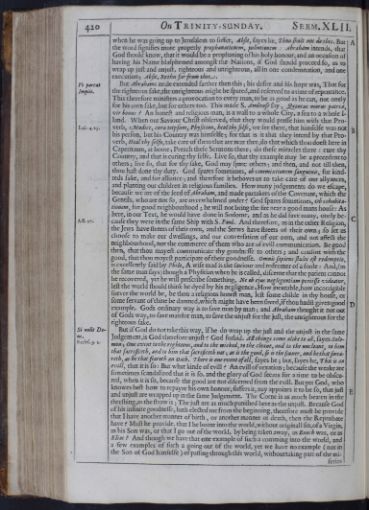 420
On Trinity-sunday.
Serm. XLII.
when he was going up to Jerusalem to suffer, Absit, sayes he, Thou shalt not do this. But
420
On Trinity-sunday.
Serm. XLII.
when he was going up to Jerusalem to suffer, Absit, sayes he, Thou shalt not do this. But
the word signifies more properly prophanationem, pollutionem: Abraham intends, that
God should know, that it would be a prophaning of his holy honour, and an occasion of
having his Name blasphemed amongst the Nations, if God should proceed so, as to
wrap up just and unjust, righteous and unrighteous, all in one condemnation, and one
execution; Absit, Be this far from thee. But Abrahams zeale extended farther then this;Vt parcat
Impiis. his desire and his hope was, That for
the righteous sake, the unrighteous might be spared, and reserved to a time of repentance.
This therefore ministers a provocation to every man, to be as good as he can, not onely
for his own sake, but for others too. This made S. Ambrose say, Quantus murus patriæ,
vir bonus? An honest and religious man, is a wall to a whole City, a sea to a whole I-
land. When our Saviour Christ observed, that they would presse him with that Pro-
verb, Medice, cura teipsum, Physitian, heal thy selfe, we see there, that himselfe was not
his person, Luk. 4.23. but his Country was himselfe; for that is it that they intend by that Pro-
verb, Heal thy selfe, take care of them that are near thee, do that which thou doest here in
Capernaum, at home; Preach these Sermons there; do these miracles there: cure thy
Country, and that is curing thy selfe. Live so, that thy example may be a precedent to
others; live so, that for thy sake, God may spare others; and then, and not till then,
thou hast done thy duty. God spares sometimes, ob commixtionem sanguinis, for kind-
reds sake, and for alliance; and therefore it behoves us to take care of our allyances,
and planting our children in religious families. How many judgements do we escape,
because we are of the seed of Abraham, and made partakers of the Covenant, which the
Gentils, who are not so, are overwhelmed under? God spares sometimes, Ob cohabita-
tionem, for good neighbourhood; he will not bring the fire near a good mans house: As
here, Act. 27. in our Text, he would have done in Sodome, and as he did save many, onely be-
cause they were in the same Ship with S. Paul. And therefore, as in the other Religion,
the Jews have streets of their own, and the Stews have streets of their own; so let us
choose to make our dwellings, and our conversation of our own, and not affect the
neighbourhood, nor the commerce of them who are of evill communication. Be good
then, that thou mayest communicate thy goodnesse to others; and consort with the
good, that thou mayest participate of their goodnesse. Omnis sapiens stulti est redemptio,
is excellently said by Philo, A wise madman is the saviour and redeemer of a foole: And, (as
the same man says) though a Physitian when he is called, discerne that the patient cannot
be recovered, yet he will prescribe something, Ne ob ejus negligentiam periisse videatur,
lest the world should think he dyed by his negligence; How incurable, how incorrigible
soever the world be, be thou a religious honest man, lest some childe in thy house, or
some servant of thine be damned, which might have been saved, if thou hadst given good
example. Gods ordinary way is to save man by man; and Abraham thought it not out
of Gods way, to save man for man, to save the unjust for the just, the unrighteous for the
righteous sake. But if God do not take this way, Si nolit De-
us. if he do wrap up the just and the unjust in the same
Judgement, is God therefore unjust? God forbid. All things come alike to all, sayes Solo-
mon; One event to the righteous, and to the wicked, to the cleane, and to the uncleane, to him Eccles. 9.2.
that sacrificeth, and to him that sacrificeth not; as is the good, so is the sinner, and he that swea-
reth, as he that feareth an Oath. There is one event of all, sayes he; but, sayes he, This is an
evill, that it is so: But what kinde of evill? An evill of vexation; because the weake are
sometimes scandalized that it is so, and the glory of God seems for a time to be obscu-
red, when it is so, because the good are not discerned from the evill. But yet God, who
knowes best how to repayre his own honour, suffers it, nay appoints it to be so, that just
and unjust are wrapped up in the same Judgement. The Corne is as much beaten in the
threshing, as the straw is; The just are as much punished here as the unjust. Because God
of his infinite goodnesse, hath elected me from the beginning, therefore must he provide
that I have another manner of birth, or another manner of death, then the Reprobate
have? Must he provide, that I be borne into the world, without originall sin, of a Virgin,
as his Son was, or that I go out of the world, by being taken away, as Enoch was, or as
Elias? And though we have that one example of such a comming into the world, and
a few examples of such a going out of the world, yet we have no example (not in
the Son of God himselfe) of passing through this world, without taking part of the mi-
series
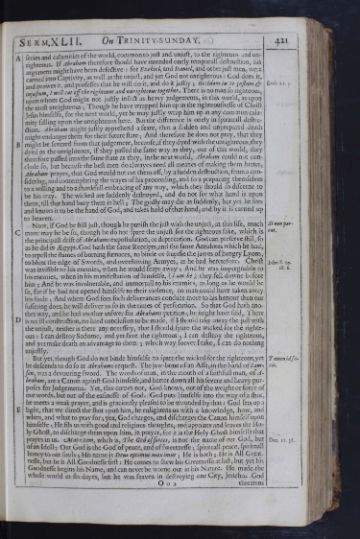 Serm. XLII.
On Trinity-sunday.
421
series and calamities of the world, common to just and unjust, to the righteous and un-
Serm. XLII.
On Trinity-sunday.
421
series and calamities of the world, common to just and unjust, to the righteous and un-righteous. If Abraham therefore should have intended onely temporall destruction, his
argument might have been defective: for Ezekiel, and Daniel, and other just men, were
carried into Captivity, as well as the unjust, and yet God not unrighteous: God does it,
and avowes it, and professes that he will do it, and do it justly;Ezek. 21.3. Occidam in te justum &
injustum, I will cut off the righteous and unrighteous together. There is no man so righteous,
upon whom God might not justly inflict as heavy judgements, in this world, as upon
the most unrighteous; Though he have wrapped him up in the righteousnesse of Christ
Jesus himselfe, for the next world, yet he may justly wrap him up in any common cala-
mity falling upon the unrighteous here. But the difference is onely in spirituall destru-
ction. Abraham might justly apprehend a feare, that a sudden and unprepared death
might endanger them for their future state; And therefore he does not pray, that they
might be severed from that judgement, because, if they dyed with the unrighteous, they
dyed as the unrighteous, if they passed the same way as they, out of this world, they
therefore passed into the same state as they, in the next world, Abraham could not con-
clude so, but because the best men do alwayes need all meanes of making them better,
Abraham prayes, that God would not cut them off, by a sudden destruction, from a con-
sidering, and contemplating the wayes of his proceeding, and so a preparing themselves
to a willing and to a thankfull embracing of any way, which they should so discerne to
be his way. The wicked are suddenly destroyed; and do not see what hand is upon
them, till that hand bury them in hell; The godly may die as suddenly, but yet he sees
and knows it to be the hand of God, and takes hold of that hand, and by it is carried up
to heaven. Now, if God be still just, though he punish the just with the unjust, in this life, Sinon par-
cat. much
more may he be so, though he do not spare the unjust for the righteous sake, which is
the principall drift of Abrahams expostulation, or deprecation. God can preserve still, so
as he did in Ægypt. God hath the same Receipts, and the same Antidotes which he had,
to repell the flames of burning furnaces, to binde or stupifie the jawes of hungry Lyons,
to blunt the edge of Swords, and overflowing. Armyes, as he had heretofore.Iohn 8.59.
18.6. Christ
was invisible to his enemies, when he would scape away; And he was impregnable to
his enemies, when in his manifestation of himselfe, (I am he) they fell downe before
him; And he was invulnerable, and immortall to his enemies, as long as he would be
so, for if he had not opened himselfe to their violence, no man could have taken away
his soule; And where God sees such deliverances conduce more to his honour then our
suffering does, he will deliver us so in the times of persecution. So that God hath ano-
ther way, and he had another answer for Abrahams petition; he might have said, There
is no ill construction, no hard conclusion to be made, if I should take away the just with
the unjust, neither is there any necessity, that I should spare the wicked for the righte-
ous: I can destroy Sodome, and yet save the righteous; I can destroy the righteous,
and yet make death an advantage to them; which way soever I take, I can do nothing
unjustly. But yet, though God do not binde himselfe to spare the wicked for the righteous, Tamen id fa-
cit. yet
he descends to do so at Abrahams request. The jaw-bone of an Asse, in the hand of Sam-
son, was a devouring sword. The words of man, in the mouth of a faithfull man, of A-
braham, are a Canon against God himselfe, and batter down all his severe and heavy pur-
poses for Judgements. Yet, this comes not, God knows, out of the weight or force of
our words, but out of the easinesse of God. God puts himselfe into the way of a shot,
he meets a weak prayer, and is graciously pleased to be wounded by that: God sets up a
light, that we direct the shot upon him, he enlightens us with a knowledge, how, and
when, and what to pray for; yea, God charges, and discharges the Canon himself upon
himselfe; He fils us with good and religious thoughts, and appoints and leaves the Ho-
ly Ghost, to discharge them upon him, in prayer, for it is the Holy Ghost himselfe that
prayes in us. Mauz zim, whchwhich is, The God of forces, is not the name of our God, Dan. 11.38. but
of an Idoll; Our God is the God of peace, and of sweetnesse; spirituall peace, spirituall
honey to our souls; His name is Deus optimus maximus; He is both; He is All Great-
nesse, but he is All Goodnesse first: He comes to shew his Greatnesse at last, but yet his
Goodnesse begins his Name, and can never be worne out in his Nature. He made the
whole world in six dayes, but he was seaven in destroying one City, Jericho. God Oo2 threatens
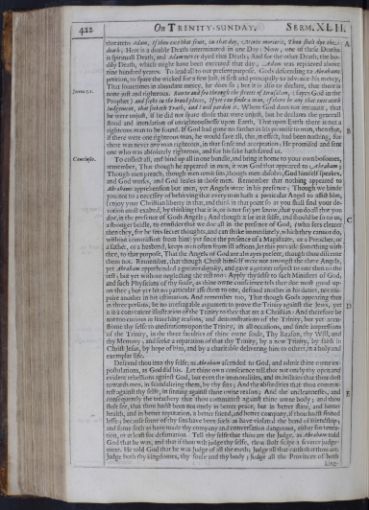 42
On Trinity-sunday.
Serm. XLII.
threatens Adam, If thou eate that fruit, in that day, Morte morieris, Thou shalt dye the
42
On Trinity-sunday.
Serm. XLII.
threatens Adam, If thou eate that fruit, in that day, Morte morieris, Thou shalt dye the
death; Here is a double Death interminated in one Day: Now, one of these Deaths
is spirituall Death, and Adam never dyed that Death; And for the other Death, the bo-
dily Death, which might have been executed that day, Adam was reprieved above
nine hundred yeares. To lead all to our present purpose, Gods descending to Abrahams
petition, to spare the wicked for a few just, is first and principally to advance his mercy,
That sometimes in abundant mercy, he does so; but it is also to declare, that there is
none just and righteous.Jerem. 5.1. Run to and fro through the streets of Ierusalem, (sayes God in the
Prophet) and seeke in the broad places, If yee can finde a man, if there be any that executeth
Iudgement, that seeketh Truth, and I will pardon it. Where God does not intimate, that
he were unjust, if he did not spare those that were unjust, but he declares the generall
flood and inundation of unrighteousnesse upon Earth, That upon Earth there is not a
righteous man to be found. If God had gone no farther in his promise to man, then that,
if there were one righteous man, he would save all, this, in effect, had been nothing, for
there was never any man righteous, in that sense and acceptation; He promised and sent
one who was absolutely righteous, and for his sake hath saved us.
To collect all, Conclusio. and bind up all in one bundle, and bring it home to your own bosomes,
remember, That though he appeared in men, it was God that appeared to Abraham;
Though men preach, though men remit sins, though men absolve, God himself speakes,
and God works, and God seales in those men. Remember that nothing appeared to
Abrahams apprehension but men, yet Angels were in his presence; Though we binde
you not to a necessity of beleeving that every man hath a particular Angel to assist him,
(enjoy your Christian liberty in that, and think in that point so as you shall find your de-
votion most exalted, by thinking that it is, or is not so) yet know, that you do all that you
doe, in the presence of Gods Angels; And though it be in it selfe, and should be so to us,
a stronger bridle, to consider that we doe all in the presence of God; (who sees clearer
then they, for he sees secret thoughts, and can strike immediately, which they cannot do,
without commission from him) yet since the presence of a Magistrate, or a Preacher, or
a father, or a husband, keeps men often from ill actions, let this prevaile something with
thee, to that purpose, That the Angels of God are alwayes present, though thou discerne
them not. Remember, that though Christ himself were not amongst the three Angels,
yet Abraham apprehended a greater dignity, and gave a greater respect to one then to the
rest; but yet without neglecting the rest too: Apply thy selfe to such Ministers of God,
and such Physitians of thy soule, as thine owne conscience tels thee doe most good up-
on thee; but yet let no particular affection to one, defraud another in his duties, nor em-
paire another in his estimation. And remember too, That though Gods appearing thus
in three persons, be no irrefragable argument to prove the Trinity against the Jews, yet
it is a convenient illustration of the Trinity to thee that art a Christian: And therefore be
not too curious in searching reasons, and demonstrations of the Trinity, but yet accu-
stome thy selfe to meditations upon the Trinity, in all occasions, and finde impressions
of the Trinity, in the three faculties of thine owne soule, Thy Reason, thy Will, and
thy Memory; and seeke a reparation of that thy Trinity, by a new Trinity, by faith in
Christ Jesus, by hope of him, and by a charitable delivering him to others, in a holy and
exemplar life.
Descend thou into thy selfe, as Abraham ascended to God, and admit thine owne ex-
postulations, as God did his. Let thine own conscience tell thee not onely thy open and
evident rebellions against God, but even the immoralities, and incivilities that thou dost
towards men, in scandalizing them, by thy sins; And the absurdities that thou commit-
test against thy selfe, in sinning against thine owne reason; And the uncleannesses, and
consequently the treachery that thou committest against thine owne body; and thou
shalt see, that thou hadst been not onely in better peace, but in better state, and better
health, and in better reputation, a better friend, and better company, if thou hadst sinned
lesse; because some of thy sins have been such as have violated the band of friendship;
and some such as have made thy company and conversation dangerous, either for tenta-
tion, or at least for defamation. Tell thy selfe that thou art the Judge, as Abraham told
God that he was, and that if thou wilt judge thy selfe, thou shalt scape a severer judge-
ment. He told God that he was Judge of all the earth; Judge all that earth that thou art,
Judge both thy kingdomes, thy soule and thy body; Judge all the Provinces of both king-
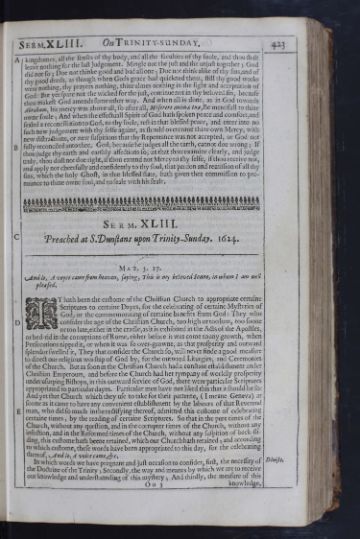 Serm. XLIII.
On Trinity-sunday.
423
kingdomes, all the senses of thy body, and all the faculties of thy soule, and thou shalt
Serm. XLIII.
On Trinity-sunday.
423
kingdomes, all the senses of thy body, and all the faculties of thy soule, and thou shalt
leave nothing for the last Judgement. Mingle not the just and the unjust together; God
did not so; Doe not thinke good and bad all one; Doe not think alike of thy sins, and of
thy good deeds, as though when Gods grace had quickned them, still thy good works
were nothing, thy prayers nothing, thine almes nothing in the sight and acceptation of
God: But yet spare not the wicked for the just, continue not in thy beloved sin, because
thou makest God amends some other way. And when all is done, as in God towards
Abraham, his mercy was above all, so after all, Miserere animæ tuæ, Be mercifull to thine
owne soule; And when the effectuall Spirit of God hath spoken peace and comfort, and
sealed a reconciliation to God, to thy soule, rest in that blessed peace, and enter into no
such new judgement with thy selfe againe, as should overcome thine own Mercy, with
new distractions, or new suspitions that thy Repentance was not accepted, or God not
fully reconciled unto thee. God, because he judges all the earth, cannot doe wrong; If
thou judge thy earth and earthly affections so, as that thou examine clearly, and judge
truly, thou dost not doe right, if thou extend not Mercy to thy selfe, if thou receive not,
and apply not cheerfully and confidently to thy soul, that pardon and remission of all thy
sins, which the holy Ghost, in that blessed state, hath given thee commission to pro-
nounce to thine owne soul, and to seale with his seale.
Serm. XLIII.
Preached at S. Dunstans upon Trinity-Sunday. 1624.
Mat. 3. 17.
And lo, A voyce came from heaven, saying, This is my beloved Sonne, in whom I am well
pleased.
ITIt hath been the custome of the Christian Church to appropriate certaine
Scriptures to certaine Dayes, for the celebrating of certaine Mysteries of
God, or the commemorating of certaine benefits from God: They who
consider the age of the Christian Church, too high or too low, too soone
or too late, either in the cradle, as it is exhibited in the Acts of the Apostles,
or bed-rid in the corruptions of Rome, either before it was come to any growth, when
Persecutions nipped it, or when it was so over-growne, as that prosperity and outward
splendor swelled it, They that consider the Church so, will never finde a good measure
to direct our religious worship of God by, for the outward Liturgies, and Ceremonies
of the Church. But as soon as the Christian Church had a constant establishment under
Christian Emperours, and before the Church had her tympany of worldly prosperity
under usurping Bishops, in this outward service of God, there were particular Scriptures
appropriated to particular dayes. Particular men have not liked this that it should be so:
And yet that Church which they use to take for their patterne, (I meane Geneva) as
soone as it came to have any convenient establishment by the labours of that Reverend
man, who did so much in the rectifying thereof, admitted this custome of celebrating
certaine times, by the reading of certaine Scriptures. So that in the pure times of the
Church, without any question, and in the corrupter times of the Church, without any
infection, and in the Reformed times of the Church, without any suspition of back-sli-
ding, this custome hath beene retained, which our Church hath retained; and according
to which custome, these words have been appropriated to this day, for the celebrating
thereof, And lo, A voice came, &c.
In which words we have pregnant and just occasion to consider, first, Divisio. the necessity of
the Doctrine of the Trinity; Secondly, the way and meanes by which we are to receive
our knowledge and understannding of this mystery; And thirdly, the measure of this Oo3 knowledge,
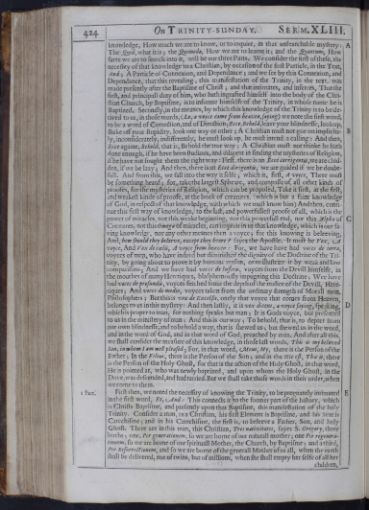 424
On Trinity-sunday.
Serm. XLIII.
knowledge, How much we are to know, or to inquire, in that unsearchable mystery:
424
On Trinity-sunday.
Serm. XLIII.
knowledge, How much we are to know, or to inquire, in that unsearchable mystery:
The Quid, what it is; the Quomodo, How we are to learne it; and the Quantum, How
farre we are to search into it, will be our three Parts. We consider the first of these, the
necessity of that knowledge to a Christian, by occasion of the first Particle, in the Text,
And; A Particle of Connexion, and Dependance; and we see by this Connexion, and
Dependance, that this revealing, this manifestation of the Trinity, in the text, was
made presently after the Baptisme of Christ; and that intimates, and inferres, That the
first, and principall duty of him, who hath ingrafted himself into the body of the Chri-
stian Church, by Baptisme, is to informe himselfe of the Trinity, in whose name he is
Baptized. Secondly, in the meanes, by which this knowledge of the Trinity is to be de-
rived to us, in those words, (Lo, a voyce came from heaven, saying) we note the first word,
to be a word of Correction, and of Direction; Ecce, Behold, leave your blindnesse, look up,
shake off your stupidity, look one way or other; A Christian must not goe on implicite-
ly, inconsiderately, indifferently, he must look up, he must intend a calling: And then,
Ecce againe, Behold, that is, Behold the true way; A Christian must not thinke he hath
done enough, if he have been studious, and diligent in finding the mysteries of Religion,
if he have not sought them the right way: First, there is an Ecce corrigentis, we are chid-
den, if we be lazy; And then, there is an Ecce dirigentis, we are guided if we be doubt-
full. And from this, we fall into the way it selfe; which is, first, A voyce, There must
be something heard; for, take the largest Spheare, and compasse of all other kinds of
proofes, for the mysteries of Religion, which can be proposed, Take it first, at the first,
and weakest kinde of proofe, at the book of creatures, (which is but a faint knowledge
of God, in respect of that knowledge, with which we must know him) And then, conti-
nue this first way of knowledge, to the last, and powerfullest proofe of all, which is the
power of miracles, not this weake beginning, not this powerfull end, not this Alpha of
Creatures, not this Omega of miracles, can imprint in us that knowledge, which is our sa-
ving knowledge, nor any other meanes then a voyce; for this knowing is beleeving,
And, how should they beleeve, except they heare? sayes the Apostle. It must be Vox, A
voyce, And Vox de cœlis, A voyce from heaven: For, we have have had voces de terra,
voyces of men, who have indeed but diminished the dignity of the Doctrine of the Tri-
nity, by going about to prove it by humane reason, or to illustrate it by weak and low
comparisons; And we have had voces de Inferis, voyces from the Devill himselfe, in
the mouthes of many Heretiques, blasphemously impugning this Doctrine; Wee have
had voces de profundis, voyces fetched from the depth of the malice of the Devill, Here-
tiques; And voces de medio, voyces taken from the ordinary strength of Morall men,
Philosophers; But this is vox de Excelsis, onely that voyce that comes from Heaven,
belongs to us in this mystery: And then lastly, it is vox dicens, a voyce saying, speaking,
which is proper to man, for nothing speaks but man; It is Gods voyce, but presented
to us in the ministery of man; And this is our way; To behold, that is, to depart from
our own blindnesse, and to behold a way, that is shewed us; but shewed us in the word,
and in the word of God, and in that word of God, preached by man. And after all this,
we shall consider the measure of this knowledge, in those last words, This is my beloved
Son, in whom I am well pleased; For, in that word, Meus, My, there is the Person of the
Father; In the Filius, there is the Person of the Son; and in the Hic est, This is, there
is the Person of the Holy Ghost, for that is the action of the Holy Ghost, in that word,
He is pointed at, who was newly baptized, and upon whom the Holy Ghost, in the
Dove, was descended, and had tarried. But we shall take those words in their order, when
we come to them.
1 Part. First then, we noted the necessity of knowing the Trinity, to be pregnantly intimated
in the first word, Et, And: This connects it to the former part of the history, which
is Christs Baptisme, and presently upon that Baptisme, this manifestation of the holy
Trinity. Consider a man, as a Christian, his first Element is Baptisme, and his next is
Catechisme; and in his Catechisme, the first is, to beleeve a Father, Son, and holy
Ghost. There are in this man, this Christian, Tres nativitates, sayes S. Gregory, three
births; one, Per generationem, so we are borne of our naturall mother; one Per regenera-
tionem, so we are borne of our spirituall Mother, the Church, by Baptisme; and a third,
Per Resurrectionem, and so we are borne of the generall Mother of us all, when the earth
shall be delivered, not of twins, but of millions, when she shall empty her selfe of all her children,
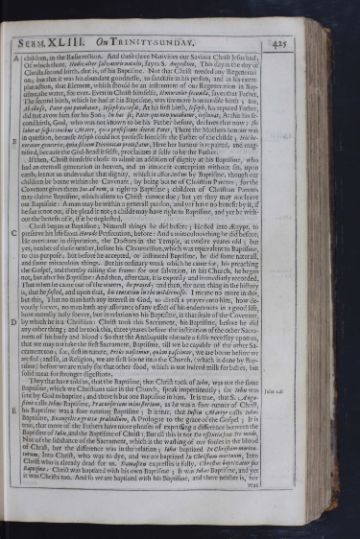 Serm. XLIII.
On Trinity-sunday.
425
children, in the Resurrection. And these three Nativities our Saviour Christ Jesus had;
Serm. XLIII.
On Trinity-sunday.
425
children, in the Resurrection. And these three Nativities our Saviour Christ Jesus had;
Of which three, Hodie alter salvator is natalis, sayes S. Augustine, This day is the day of
Christs second birth, that is, of his Baptisme. Not that Christ needed any Regenerati-
on; but that it was his abundant goodnesse, to sanctifie in his person, and in his exem-
plar action, that Element, which should be an instrument of our Regeneration in Bap-
tisme, the water, for ever. Even in Christ himselfe, Honoratior secunda, sayes that Father,
The second birth, which he had at his Baptisme, was the more honourable birth; for,
Ab illa se, Pater qui putabatur, Ioseph excusat, At his first birth, Ioseph, his reputed Father,
did not avow him for his Son; In hac se, Pater qui non putabatur, insinuat, At this his se-
cond birth, God, who was not known to be his Father before, declares that now: Ibi
labor at suspicionibus Mater, quia professioni deerat Pater, There the Mothers honour was
in question, because Ioseph could not professe himselfe the Father of the childe; Hic ho-
noratur genetrix, quia filium Divinitas protestatur, Here her honour is repaired, and mag-
nified, because the God-head it selfe, proclaimes it selfe to be the Father.
If then, Christ himselfe chose to admit an addition of dignity at his Baptisme, who
had an eternall generation in heaven, and an innocent conception without sin, upon
earth, let not us undervalue that dignity, which is afforded us by Baptisme, though our
children be borne within the Covenant, by being borne of Christian Parents; for the
Covenant gives them Ius ad rem, a right to Baptisme; children of Christian Parents
may claime Baptisme, which aliens to Christ cannot doe; but yet they may not leave
out Baptisme: A man may be within a generall pardon, and yet have no benefit by it, if
he sue it not out, if he plead it not; a childe may have right to Baptisme, and yet be with-
out the benefit of it, if it be neglected.
Christ began at Baptisme; Naturall things he did before; He fled into Ægypt, to
preserve his life from Herods Persecution, before: And a miraculous thing he did before;
He overcame in disputation, the Doctors in the Temple, at twelve yeares old; but
yet, neither of these neither, before his Circumcision, which was equivalent to Baptisme,
to this purpose; but before he accepted, or instituted Baptisme, he did some naturall,
and some miraculous things. But his ordinary work which he came for, his preaching
the Gospel, and thereby raising the frame for our salvation, in his Church, he began
not, but after his Baptisme: And then, after that, it is expresly and immediatly recorded,
That when he came out of the waters, he prayed; and then, the next thing in the history
is, that he fasted, and upon that, his tentation in the wildernesse. I meane no more in this,
but this, That no man hath any interest in God, to direct a prayer unto him, how de-
voutly soever, no man hath any assurance of any effect of his endeavours in a good life,
how morally holy soever, but in relation to his Baptisme, in that seale of the Covenant,
by which he is a Christian: Christ took this Sacrament, his Baptisme, before he did
any other thing; and he took this, three yeares before the institution of the other Sacra-
ment of his body and blood: So that the Anabaptists obtrude a false necessity upon us,
that we may not take the first Sacrament, Baptisme, till we be capable of the other Sa-
crament too; for, first in nature, Priùs nascimur, quàm pascimur, we are borne before we
are fed; and so, in Religion, we are first borne into the Church, (which is done by Bap-
tisme) before we are ready for that other food, which is not indeed milk for babes, but
solid meat for stronger digestions.
They that have told us, that the Baptisme, that Christ took of Iohn, was not the same
John 1.6. Baptisme, which we Christians take in the Church, speak impertinently; for Iohn was
sent by God to baptize; and there is but one Baptisme in him. It is true, that S. Augu-
stine calls Iohns Baptisme, Præcursorium ministerium, as he was a fore-runner of Christ,
his Baptisme was a fore-running Baptisme; It is true, that Iustin Martyr calls Iohns
Baptisme, Euangelicæ gratiæ præludium, A Prologue to the grace of the Gospel; It is
true, that more of the Fathers have more phrases of expressing a difference between the
Baptisme of Iohn, and the Baptisme of Christ: But all this is not De essentia, but De modo,
Not of the substance of the Sacrament, which is the washing of our soules in the blood
of Christ, but the difference was in the relation; Iohn baptized In Christum moritu-
turum, Into Christ, who was to dye, and we are baptized In Christum mortuum, Into
Christ who is already dead for us. Damascen expresses it fully, Christus baptizatur suo
Baptismo: Christ was baptized with his own Baptisme; It was Iohns Baptisme, and yet
it was Christs too. And so we are baptized with his Baptisme, and there neither is, nor was
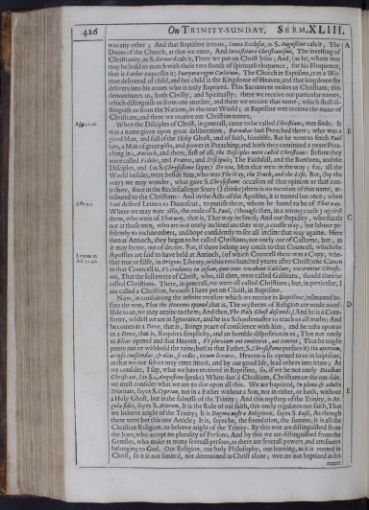 426
On Trinity-sunday.
Serm. XLIII.
was any other; And that Baptisme is to us, Ianua Ecclesiæ, as S. Augustine cals it, The
426
On Trinity-sunday.
Serm. XLIII.
was any other; And that Baptisme is to us, Ianua Ecclesiæ, as S. Augustine cals it, The
Doore of the Church, at that we enter, And Investitura Christianismi, The investing of
Christianity, as S. Bernard cals it, There we put on Christ Jesus; And, (as he, whom wee
may be bold to match with these two floods of spirituall eloquence, for his Eloquence,
that is Luther expresses it) Puerpera regni Cœlorum, The Church in Baptisme, is as a Wo-
man delivered of child, and her child is the Kingdome of Heaven, and that kingdome she
delivers into his armes who is truly Baptized. This Sacrament makes us Christians; this
denominates us, both Civilly, and Spiritually; there we receive our particular names,
which distinguish us from one another, and there we receive that name, which shall di-
stinguish us from the Nations, in the next World; at Baptisme wee receive the name of
Christians, Acts. 11.26. and there we receive our Christian names.
When the Disciples of Christ, in generall, came to be called Christians, wee finde. It
was a name given upon great deliberation, Barnabas had Preached there; who was a
good Man, and full of the Holy Ghost, and of faith, himselfe. But he went to fetch Paul
too, a Man of great gifts, and power in Preaching; and both they continued a yeare Prea-
ching in Antioch, and there, first of all, the Disciples were called Christians: Before they
were called Fideles, and Fratres, and Discipuli; The Faithfull, and the Brethren, and the
Disciples, and (as S. Chrysostome sayes) De via, Men that were in the way; for, all the
World besides, were beside him, who was The Way, the Truth, and the Life. But, (by the
way) we may wonder, what gave S. Chrysostome occasion of that opinion or that con-
jecture, since in the Ecclesiastique Story (I thinke) there is no mention of that name, at-
tributed to the Christians: And in the Acts of the Apostles, it is named but once; when
Saul desired Letters to Damascus, Acts 9.2. to punish them, whom he found to be of That way.
Where we may note also, the zeale of S. Paul, (though then, in a wrong cause) against
them, who were of That way, that is, That way inclined; And our stupidity, who startle
not at those men, who are not onely inclined another way, a crosse way, but labour pe-
stilently to incline others, and hope confidently to see all incline that way againe. Here
then at Antioch, they began to be called Christians; not onely out of Custome, but, as
it may seeme, out of decree. For, if there belong any credit to that Councell, which the
Lorinus in
Act 11.20. Apostles are said to have held at Antioch, (of which Councell there was a Copy, whe-
ther true or false, in Origens Library, within two hundred yeares after Christ) one Canon
in that Councell is, Vt credentes in Iesum, quos tunc vocabant Galilæos, vocarentur Christi-
ani, That the followers of Christ, who, till then, were called Galileans, should then be
called Christians. There, in generall, we were all called Christians; but, in particular, I
am called a Christian, because I have put on Christ, in Baptisme.
Now, in considering the infinite treasure which we receive in Baptisme, insinuated be-
fore the text, That the Heavens opened, that is, The mysteries of Religion are made acces-
sible to us, we may attaine to them; And then, The Holy Ghost descends, (And he is a Com-
forter, whilest we are in Ignorance, and he is a Schoolemaster to teach us all truths) And
he comes as a Dove, that is, Brings peace of conscience with him, and he rests upon us
as a Dove, that is, Requires simplicity, and an humble disposition in us, That not onely
as Elias opened and shut Heaven, Vt pluviam aut emitteret, aut teneret, That he might
poure out or withhold the raine; but (as that Father, S. Chrysostome pursues it) Ita apertum,
ut ipse conscendas, & alios, si velles, tecum levares, Heaven is so opened to us in baptisme,
as that we our selves may enter into it, and by our good life, lead others into it too; As
we consider, I say, what we have received in Baptisme, so, if we be not onely Dealbati
Christiani, (as S. Augustine speaks) White-lim'd Christians, Christians on the out-side,
we must consider what we are to doe upon all this. We are baptized, In plena & adulta
Trinitate, sayes S. Cyprian, not in a Father without a Son, nor in either, or both, without
a Holy Ghost, but in the fulnesse of the Trinity: And this mystery of the Trinity, is Re-
gula fidei, sayes S. Hierom, It is the Rule of our faith, this onely regulates our faith, That
we beleeve aright of the Trinity; It is Dogma nostræ Religionis, sayes S. Basil, As though
there were but this one Article; It is, sayes he, the foundation, the summe, it is all the
Christian Religion, to beleeve aright of the Trinity. By this wee are distinguished from
the Jews, who accept no plurality of Persons; And by this we are distinguished from the
Gentiles, who make as many severall persons, as there are severall powers, and attributes
belonging to God. Our Religion, our holy Philosophy, our learning, as it is rooted in
Christ, so it is not limited, not determined in Christ alone; wee are not baptized in his name
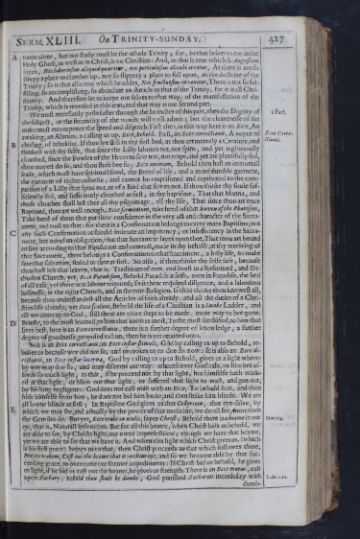 Serm. XLIII.
On Trinity-sunday.
427
name alone, but our study must be the whole Trinity; for, he that beleeves not in the
Serm. XLIII.
On Trinity-sunday.
427
name alone, but our study must be the whole Trinity; for, he that beleeves not in the
Holy Ghost, as well as in Christ, is no Christian: And, as that is true which S. Augustine
sayes, Nec laboriosius aliquid quæritur, nec periculosius alicubi erratur, As there is not so
steepy a place to clamber up, nor so slippery a place to fall upon, as the doctrine of the
Trinity; so is that also true which he addes, Nec fructuosius invenitur, There is not so ful-
filling, so accomplishing, so abundant an Article as that of the Trinity, for it is all Chri-
stianity. And therefore let us keepe our selves to that way, of the manifestation of the
Trinity, which is revealed in this text; and that way is our second part.
We must necessarily passe faster through the branches of this part, then the Dignity of 2 Part.
the subject, or the fecundity of the words will well admit; but the clearenesse of the
order must recompence the speed and dispatch. First then, in this way here is an Ecce, An
awaking, an Alarum, a calling us up, Ecce, Behold. First, an Ecce correctionis, Ecce Corre-
ctionis. A voyce of
chiding, of rebuking. If thou lye still in thy first bed, as thou art meerely a Creature, and
thinkest with thy selfe, that since the Lilly labours not, nor spins, and yet is gloriously
cloathed, since the Fowles of the Heavens sow not, nor reape, and yet are plentifully fed,
thou mayest do so, and thou shalt bee so; Ecce animam, Behold thou hast an immortall
soule, which must have spirituall food, the Bread of life, and a more durable garment,
the garment of righteousnesse, and cannot be emprisoned and captivated to the com-
parison of a Lilly that spins not, or of a Bird that sowes not. If thou thinke thy soule suf-
ficiently fed, and sufficiently cloathed at first, in thy baptisme, That that Manna, and
those cloathes shall last thee all thy pilgrimage, all thy life, That since thou art once
Baptized, thou art well enough, Ecce fermentum, take heed of that leaven of the Pharisees,
Take heed of them that put their confidence in the very act and character of the Sacra-
ment, and trust to that: for there is a Confirmation belongs to every mans Baptisme; not
any such Confirmation as should intimate an impotency, or insufficiency in the Sacra-
ment, but out of an obligation, that that Sacrament layes upon thee, That thou art bound
to live according to that stipulation and contract, made in thy behalfe, at thy receiving of
that Sacrament, there belongs a Confirmation to that Sacrament, a holy life, to make
sure that salvation, sealed to thee at first. So also, if thou thinke thy selfe safe, because
thou hast left that leaven, that is, Traditions of men, and livest in a Reformed, and Or-
thodox Church, yet, Ecce Paradisum, Behold Paradise it selfe, even in Paradise, the bed
of all ease, yet there was labour required; so is there required diligence, and a laborious
holinesse, in the right Church, and in the true Religion. If thou thinke thou knowest all,
because thou understandest all the Articles of faith already, and all the duties of a Chri-
stian life already, yet Ecce scalam, Behold the life of a Christian is a Iacobs Ladder, and
till we come up to God, still there are more steps to be made, more way to bee gone.
Briefly, to the most learned, to him that knowes most, To the most sanctified, to him that
lives best, here is an Ecce correctionis, there is a farther degree of knowledge, a farther
degree of goodnesse, proposed to him, then he is yet attained unto.
So it is an Ecce correctionis, an Ecce instar stimuli, God by calling us up to Behold, re-
bukes us because wee did not so, and provokes us to doe so now: It is also an Ecce di-
rectionis, an Ecce instar lucernæ, God by calling us up to Behold, gives us a light where-
by wee may doe so, and may discerne our way: whomsoever God cals, to him hee af-
fords so much light, as that, if he proceed not by that light, hee himselfe hath wink-
ed at that light, or blow out that light, or suffered that light to wast, and goe out,
by his long negligence. God does not call man with an Ecce, To behold him, and then
hide himselfe from him; he does not bid him looke, and then strike him blinde. We are
all borne blinde at first; In Baptisme God gives us that Collyrium, that eye-salve, by
which we may see, and actually by the power of that medicine, we do all see, Mat. 7.4. more then
the Gentiles do. But yet, Ecce trabs in oculis, sayes Christ; Behold there is a beame in our
eye, that is, Naturall infirmities. But for all this beame, when Christ bids us behold, we
are able to see, by Christs light, our owne imperfections; though we have that beame,
yet we are able to see that we have it. And when this light which Christ gives us, (which
is his first grace) brings us to that, then Christ proceeds so that which followes there,
Projice trabem, Cast out the beame that is in thine eye, and so we become able by that suc-
ceeding grace, to overcome our former impediments: If Christ bid us behold, he gives
us light; if he bid us cast out the beame, he gives us strength. There is an Ecce neutus, cast
upon Zachary, Behold thou shalt be dumbe,Luke 1.20. God punished Zacharies incredulity with dumb-
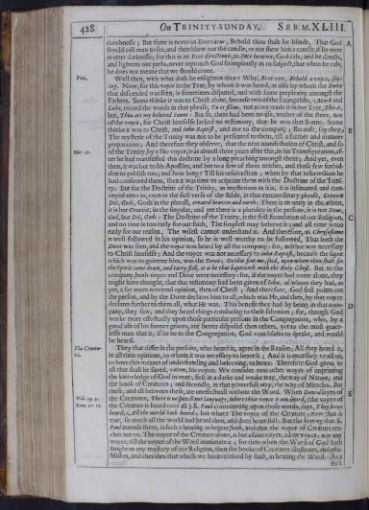 428
On Trinity-sunday.
Serm. XLIII.
dumbnesse; But there is never an Ecce cæcus, Behold thou shalt be blinde, That God
428
On Trinity-sunday.
Serm. XLIII.
dumbnesse; But there is never an Ecce cæcus, Behold thou shalt be blinde, That God
should call man to see, and then blow out the candle, or not shew him a candle, if he were
in utter darknesse; for this is an Ecce directionis, an Ecce lucernæ, God cals, and he directs,
and lightens our paths; never reproach God so impiously as to suspect, that when he cals,
he does not meane that we should come.
Well then, Vox. with what doth he enlighten thee? Why, Ecce vox, Behold a voyce, say-
ing. Now, for this voyce in the Text, by whom it was heard, as also by whom the Dove
that descended was seen, is sometimes disputed, and with some perplexity amongst the
Fathers. Some thinke it was to Christ alone, because two of the Euangelists, Mark and
Luke, record the words in that phrase, Tu es filius, not as we reade it in our Text, This is,
but, Thou art my beloved Sonne: But so, there had been no use, neither of the Dove, nor
of the voyce; for Christ himselfe lacked no testimony, that he was that Sonne. Some
thinke it was to Christ, and Iohn Baptist, and not to the company; Because, say they,
The mysterie of the Trinity was not to be presented to them, till a farther and maturer
preparation; And therefore they observe, that the next manifestation of Christ, and so
of the Trinity, Mat. 17. by a like voyce, was almost three years after this, in his Transfiguration, af-
ter he had manifested this doctrine by a long preaching amongst them; And yet, even
then, it was but to his Apostles, and but to a few of them neither, and those few forbid-
den to publish too; and how long? Till his resurrection; when by that resurrection he
had confirmed them, then it was time to acquaint them with the Doctrine of the Trini-
ty. But for the Doctrine of the Trinity, as mysterious as it is, it is insinuated and con-
veyed unto us, even in the first verse of the Bible, in that extraordinary phrase, Creavit
Dii, Gods, Gods in the plurall, created heaven and earth; There is an unity in the action,
it is but Creavit, in the singular, and yet there is a plurality in the persons, it is not Deus,
God, but Dij, Gods: The Doctrine of the Trinity, is the first foundation of our Religion,
and no time is too early for our faith, The simplest may beleeve it; and all time is too
early for our reason, The wisest cannot understand it. And therefore, as Chrysostome
is well followed in his opinion, so he is well worthy to be followed, That both the
Dove was seen, and the voyce was heard by all the company: for, neither was necessary
to Christ himselfe; And the voyce was not necessary to Iohn Baptist, because the signe
which was to governe him, was the Dove; He that sent me, said, upon whom thou shalt see
the Spirit come down, and tarry still, it is he that baptizeth with the Holy Ghost. But to the
company, both voyce and Dove were necessary: for, if the voyce had come alone, they
might have thought, that that testimony had been given of Iohn, of whom they had, as
yet, a far more reverend opinion, then of Christ; And therefore, God first points out
the person, and by the Dove declares him to all, which was He, and then, by that voyce
declares farther to them all, what He was. This benefit they had by being in that com-
pany, they saw, and they heard things conducing to their salvation; for, though God
worke more effectually upon those particular persons in the Congregation, who, by a
good use of his former graces, are better disposed then others, yet to the most grace-
lesse man that is, if he be in the Congregation, God vouchsafes to speake, and would
be heard.
They that differ in the persons, Via Creatu-
ræ. who heard it, agree in the Reason; All they heard it,
in all their opinions, to whom it was necessary to heare it; And it is necessary to all us,
to have this meanes of understanding and beleeving, to heare. Therefore God gives to
all that shall be saved, vocem, his voyce. We consider two other wayes of imprinting
the knowledge of God in man; first in a darke and weake way, the way of Nature, and
the book of Creatures; and secondly, in that powerfull way, the way of Miracles. But
these, and all between these, are uneffectuall without the Word. When David sayes of
the Creatures, Psal. 19.3. There is no speech nor language, where their voyce is not heard, (the voyce of
the CreatureRom. 10.17. is heard over all) S. Paul commenting upon those words, says, They have
heard, All the world hath heard; but what? The voyce of the Creature; now that is
true, so much all the world had heard then, and does heare still: But the hearing that S.
Paul intends there, is such a hearing as begets faith, and that the voyce of Creature rea-
ches not to. The voyce of the Creature alone, is but a faint voyce, a low voyce; nor any
voyce, till the voyce of the Word inanimate it; for then when the Word of God hath
taught us any mystery of our Religion, then the booke of Creatures illustrates, and esta-
blishes, and cherishes that which we have received by faith, in hearing the Word: As a stick
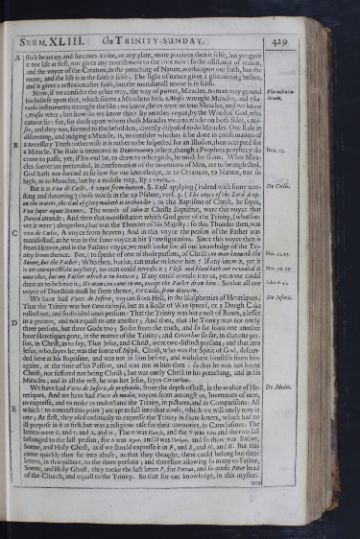 Serm. XLIII.
On Trinity-sunday.
429
stick bears up, and succours a vine, or any plant, more precious then it selfe, but yet gave
Serm. XLIII.
On Trinity-sunday.
429
stick bears up, and succours a vine, or any plant, more precious then it selfe, but yet gave
it not life at first, nor gives any nourishment to the root now: so the assistance of reason,
and the voyce of the Creature, in the preaching of Nature, works upon our faith, but the
roote, and the life is in the faith it selfe; The light of nature gives a glimmering before,
and it gives a reflexion after faith, but the meridianall noone is in faith.
Now, if we consider the other way, the way of power, Via miracu-
lorum. Miracles, no man may ground
his beliefe upon that, which seems a Miracle to him. Moses wrought Miracles, and Pha-
raohs instruments wrought the like: we know, theirs were no true Miracles, and we know
Moses were; but how do we know this? By another voyce, by the Word of God, who
cannot lie: for, for those upon whom those Miracles were to worke on both sides, Mo-
ses, and they too, seemed to the beholders, diversly disposed to do Miracles. One Rule in
discerning, and judging a Miracle, is, to consider whether it be done in confirmation of
a necessary Truth: otherwise it is rather to be suspected for an Illusion, then accepted for
a Miracle. The Rule is intimated in Deuteronomy, where, Deut. 13. though a Prophets prophecy do
come to passe, yet, if his end be, to draw to other gods, he must be slaine. What Mira-
cles soever are pretended, in confirmation of the inventions of Men, are to be neglected.
God hath not carried us so low for our knowledge, as to Creatures, to Nature, nor so
high, as to Miracles, but by a middle way, By a voyce.
But it is Vox de Cœlis, A voyce from heaven. S. Basil applying (indeed with some wre-
sting and derorting) those words in the 29 Psalme, vers. 3.De Cœlis. (The voyce of the Lord is up-
on the waters, the God of glory maketh it to thunder) to this Baptisme of Christ, he sayes,
Vox super aquas Ioannes, The words of Iohn at Christs Baptisme, were this voyce that
David intends; And then that manifestation which God gave of the Trinity, (whatsoe-
ver it were) altogether, that was the Thunder of his Majesty: so this Thunder then, was
vox de Cœlis, A voyce from heaven; And in this voyce the person of the Father was
manifested, as he was in the same voyce at his Transfiguration. Since this voyce then is
from Heaven, and is the Fathers voyce, we must looke for all our knowledge of the Tri-
nity from thence. For, (to speake of one of those persons, Mat. 11.27. of Christ) no man knoweth the
Sonne, but the Father; Who then, but he, can make us know him? If any knew it, yet it
is an unexpressible mystery, no man could reveale it;Mat. 16.17. Flesh and blood hath not revealed it
unto thee, but my Father which is in heaven; If any could reveale it to us, yet none could
draw us to beleeve it; No man can come to me, except the Father draw him:Iohn 6.44. So that all our
voyce of Direction must be from thence, De Cœlis, from Heaven.
We have had Voces de Inferis, voyces from Hell, in the blasphemies of Heretiques;
De Inferis. That the Trinity was but Cera extensa, but as a Rolle of Wax spread, or a Dough Cake
rolled out, and so divided unto persons: That the Trinity was but a nest of Boxes, a lesser
in a greater, and not equall to one another; And then, that the Trinity was not onely
three persons, but three Gods too; So far from the truth, and so far from one another
have Heretiques gone, in the matter of the Trinity; and Cerinthus so far, in that one per-
son, in Christ, as to say, That Jesus, and Christ, were two distinct persons; and that into
Jesus, who, sayes he, was the sonne of Ioseph, Christ, who was the Spirit of God, descen-
ded here at his Baptisme, and was not in him before, and withdrew himselfe from him
againe, at the time of his Passion, and was not in him then; so that he was not borne
Christ, nor suffered not being Christ; but was onely Christ in his preaching, and in his
Miracles; and in all the rest, he was but Jesus, sayes Cerinthus.
We have had Voces de Inferis, de profundis, from the depth of hell, De Medio. in the malice of He-
retiques, And we have had Voces de medio, voyces from amongst us, Inventions of men,
to expresse, and to make us understand the Trinity, in pictures, and in Comparisons: All
which (to contract this point) are apt to fall into that abuse, which we will onely note in
one; At first, they used ordinarily to expresse the Trinity in foure letters, which had no
ill purpose in it at first, but was a religious ease for their memories, in Catechismes: The
letters were Π, and Υ, and Α, and Π; The Π was Πατρὸς, and the Υ was Υιὸς, and the two last
belonged to the last person, for Α was Αγιον, and Π was Πνεῦμα, and so there was Father,
Sonne, and Holy Ghost, as if we should expresse it in F, and S, and H, and G. But this
came quickly thus far into abuse, as that they thought, there could belong but three
letters, in that picture, to the three persons; and therefore allowing so many to Father,
Sonne, and Holy Ghost, they tooke the last letter P, for Petrus, and so made Peter head
of the Church, and equall to the Trinity. So that for our knowledge, in this mysteri-
ous
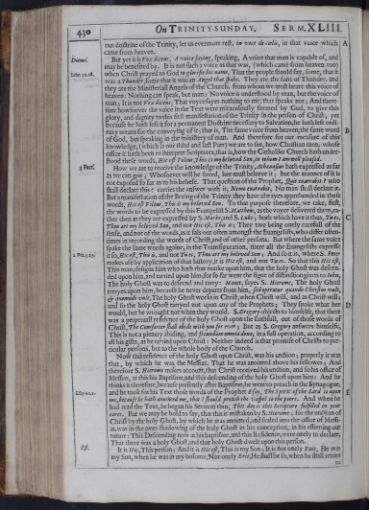 430
On Trinity-sunday.
Serm. XLIII.
ous doctrine of the Trinity, let us evermore rest, in voce de cœlis, in that voice which
430
On Trinity-sunday.
Serm. XLIII.
ous doctrine of the Trinity, let us evermore rest, in voce de cœlis, in that voice which
came from heaven.
But yet it is Vox dicens,Dicens. A voice saying, speaking, A voice that man is capable of, and
may be benefited by. It is not such a voice as that was, (which came from heaven too)
when Christ prayed to God to glorifie his name,Iohn 12.28. That the people should say, some, that it
was a Thunder, some that it was an Angel that spake. They are the sons of Thunder, and
they are the Ministeriall Angels of the Church, from whom we must heare this voice of
heaven: Nothing can speak, but man: No voice is understood by man, but the voice of
man; It is not Vox dicens, That voyce sayes nothing to me, that speaks not; And there-
fore howsoever the voice in the Text were miraculously formed by God, to give this
glory, and dignity to this first manifestation of the Trinity in the person of Christ,
yet because he hath left it for a permanent Doctrine necessary to Salvation, he hath left ordi-
nary means for the conveying of it; that is, The same voice from heaven, the same word
of God, but speaking in the ministery of man. And therefore for our measure of this
knowledge, (which is our third and last Part) we are to see, how Christian men, whose
office it hath been to interpret Scriptures, that is, how the Catholike Church hath under-
stood these words, Hic est Filius, This is my beloved Son, in whom I am well pleased.
How we are to receive the knowledge of the Trinity, 3 Part. Athanasius hath expressed as far
as we can goe; Whosoever will be saved, hee must beleeve it; but the manner of it is
not exposed so far as to his beliefe. That question of the Prophet, Quis enarrabit? who
shall declare this? carries the answer with it, Nemo enarrabit, No man shall declare it.
But a manifestation of the Beeing of the Trinity, they have alwayes apprehended in these
words, Hic est Filius, This is my beloved Son. To that purpose therefore, we take, first,
the words to be expressed by this Euangelist S. Matthew, as the voyce delivered them, ra-
ther then as they are expressed by S. Marke, and S. Luke; both which have it thus, Tu es,
Thou art my beloved Son, and not Hic est, This is; They two being onely carefull of the
sense, and not of the words, as it fals out often amongst the Euangelists, who differ often-
times in recording the words of Christ, and of other persons. But where the same voice
spake the same words againe, in the Transfiguration, there all the Euangelists expresse
it so, 2 Pet. 1.17. Hic est, This is, and not Tu es, Thou art my beloved Son; And so it is, where S. Peter
makes use by application of that history, it is Hic est, and not Tu es. So that this Hic est,
This man, designs him who hath that marke upon him, that the holy Ghost was descen-
ded upon him, and tarried upon him; for so far went the signe of distinction given to Iohn,
The holy Ghost was to descend and tarry: Manet, sayes S. Hierome, The holy Ghost
tarryes upon him, because he never departs from him, sed operatur quando Christus vult,
& quomodo vult, The holy Ghost works in Christ, when Christ will, and as Christ will;
and so the holy Ghost tarryed not upon any of the Prophets; They spoke what hee
would, but he wrought not when they would. S. Gregory objects to himselfe, that there
was a perpetuall residence of the holy Ghost upon the faithfull, out of those words of
Christ, The Comforter shall abide with you for ever; But as S. Gregory answers himselfe,
This is not a plenary abiding, and secundùm omnia dona, in a full operation, according to
all his gifts, as he tarried upon Christ: Neither indeed is that promise of Christs to par-
ticular persons, but to the whole body of the Church.
Now this residence of the holy Ghost upon Christ, was his unction; properly it was
that, by which he was the Messias, That he was anointed above his fellowes; And
therefore S. Hierome makes account, that Christ received his unction, and so his office of
Messias, at this his Baptisme, and this descending of the holy Ghost upon him: And he
thinks it therefore, because presently after Baptisme, he went to preach in the Synagogue,
and he took for his Text those words of the Prophet Esay,Esay 61.1. The Spirit of the Lord is upon
me, because he hath anointed me, that I should preach the Gospel to the poore. And when he
had read the Text, he began his Sermon thus, This day is this Scripture fulfilled in your
eares. But we may be bold to say, that this is mistaken by S. Hierome; for the unction of
Christ by the holy Ghost, by which he was anointed, and sealed into the office of Messi-
as, was in the over-shadowing of the holy Ghost in his conception, in his assuming our
nature: This Descending now at his baptisme, and this Residence, were onely to declare,
That there was a holy Ghost, and that holy Ghost dwelt upon this person.
It is Hic,Est. This person; And it is Hic est, This is my Son; It is not onely Fuit, He was
my Son, when he was in my bosome, Nor onely Erit, He shall be so, when he shall return to
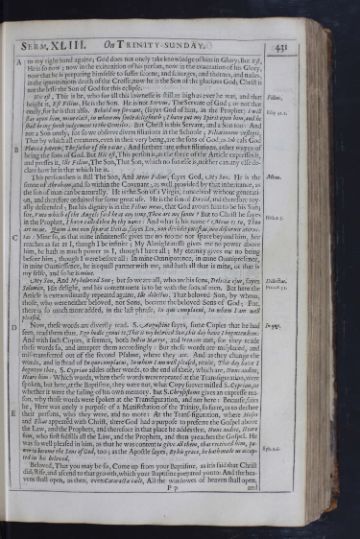 Serm. XLIII.
On Trinity-sunday.
431
to my right hand againe; God does not onely take knowledge of him in Glory; But Est
Serm. XLIII.
On Trinity-sunday.
431
to my right hand againe; God does not onely take knowledge of him in Glory; But Est
He is so now; now in the exinanition of his person, now in the evacuation of his Glory,
now that he is preparing himselfe to suffer scorne, and scourges, and thornes, and nailes,
in the ignominious death of the Crosse, now he is the Son of the glorious God; Christ is
not the lesse the Son of God for this eclipse.
Hic est, This is he, who for all this lownesse is still as high as ever he was, Filius. and that
height is, Est Filius, He is the Son. He is not Servus, The Servant of God; or not that
onely, for he is that also. Behold my servant,Esay 41.1. (sayes God of him, in the Prophet) I will
stay upon him, mine elect, in whom my soule delighteth; I have put my Spirit upon him, and he
shall bring forth judgement to the Gentiles. But Christ is this Servant, and a Son too: And
not a Son onely; for so we observe divers filiations in the Schoole; Filiationem vestigii,
That by which all creatures, even in their very being, are the sons of God, as Iob cals God
Pluviæ patrem, The father of the raine; And so there are other filiations, other wayes of
being the sons of God. But Hic est, This person is, as the force of the Article expresses it,
and presses it, Ille Filius, The Son, That Son, which no son else is, neither can any else de-
clare how he is that which he is.
This person then is still The Son, And Meus Filius, sayes God, My Son.Meus. He is the
sonne of Abraham, and so within the Covenant; as well provided by that inheritance, as
the son of man can be naturally. He is the Son of a Virgin, conceived without generati-
on, and therefore ordained for some great use. He is the son of David, and therefore roy-
ally descended; But his dignity is in the Filius meus, that God avows him to be his Son;
for, Vnto which of the Angels said he at any time, Thou art my sonne?Heb. 1.5. But to Christ he sayes
in the Prophet, I have called thee by thy name: And what is his name? Meus es tu, Thou
art mine. Quem à me non separat Deitas, sayes Leo, non dividit potestas, non discernit æterni-
tas: Mine so, as that mine infinitenesse gives me no roome nor space beyond him, hee
reaches as far as I, though I be infinite; My Almightinesse gives me no power above
him, he hath as much power as I, though I have all; My eternity gives me no being
before him, though I were before all: In mine Omnipotence, in mine Omnipresence,
in mine Omniessence, he is equall partner with me, and hath all that is mine, or that is
my selfe, and so he is mine.
My Son, And My beloved Son; but so we are all, who are his sons, Deliciæ ejus,Dilectus. sayes
Solomon, His delight, and his contentment is to be with the sons of men. But here the Prov. 8.31.
Article is extraordinarily repeated againe, Ille dilectus, That beloved Son, by whom,
those, who were neither beloved, nor Sons, became the beloved Sons of God; For,
there is so much more added, in the last phrase, In quo complacui, In whom I am well
pleased.
Now, these words are diversly read. S. Augustine sayes, In quo. some Copies that he had
seen, read them thus, Ego hodie genui te, This is my beloved Son, this day have I begotten him:
And with such Copies, it seemes, both Iustin Martyr, and Irenæus met, for they reade
these words so, and interpret them accordingly: But these words are misplaced, and
mis-transferred out of the second Psalme, where they are. And as they change the
words, and in stead of In quo complacui, In whom I am well pleased, reade, This day have I
begotten thee; S. Cyprian addes other words, to the end of these, which are, Hunc audite,
Heare him: Which words, when these words were repeated at the Transfiguration, were
spoken, but here, at the Baptisme, they were not, what Copy soever misled S. Cyprian, or
whether it were the failing of his own memory. But S. Chrysostome gives an expresse rea-
son, why those words were spoken at the Transfiguration, and not here: Because, saies
he, Here was onely a purpose of a Manifestation of the Trinity, so farre, as to declare
their persons, who they were, and no more: At the Trans-figuration, where Moses
and Elias appeared with Christ, there God had a purpose to preferre the Gospel above
the Law, and the Prophets, and therefore in that place he addes that, Hunc audite, Heare
him, who first fulfills all the Law, and the Prophets, and then preaches the Gospel. He
was so well pleased in him, as that he was content to give all them, that received him,Eph. 1.6. po-
wer to become the Sons of God, too; as the Apostle sayes, By his grace, he hath made us accep-
ted in his beloved.
Beloved, That you may be so, Come up from your Baptisme, as it is said that Christ
did; Rise, and ascend to that growth, which your Baptisme prepared you to: And the hea-
vens shall open, as then, even Cataractæ cœli, All the windowes of heaven shall open, Pp and
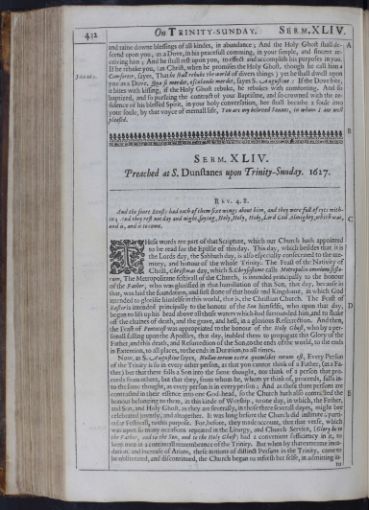 432
On Trinity-sunday.
Serm. XLIV.
and raine downe blessings of all kindes, in abundance; And the Holy Ghost shall de-
432
On Trinity-sunday.
Serm. XLIV.
and raine downe blessings of all kindes, in abundance; And the Holy Ghost shall de-scend upon you, as a Dove, in his peacefull comming, in your simple, and sincere re-
ceiving him; And he shall rest upon you, to effect and accomplish his purposes in you.
If he rebuke you, (as Christ, when he promises the Holy Ghost, though he call him a
Comforter,John 16.7. sayes, That he shall rebuke the world of divers things) yet he shall dwell upon
you as a Dove, Quæ si mordet, osculando mordet, sayes S. Augustine: If the Dove bite,
it bites with kissing, if the Holy Ghost rebuke, he rebukes with comforting. And so
baptized, and so pursuing the contract of your Baptisme, and so crowned with the re-
sidence of his blessed Spirit, in your holy conversation, hee shall breathe a soule into
your soule, by that voyce of eternall life, You are my beloved Sonnes, in whom I am well
pleased.
Serm. XLIV.
Preached at S. Dunstanes upon Trinity-Sunday. 1627.
Rev. 4.8.
And the foure Beasts had each of them sixe wings about him, and they were full of eyes with-
in; And they rest not day and night, saying, Holy, Holy, Holy, Lord God Almighty, which was,
and is, and is to come.
THeseThese words are part of that Scripture, which our Church hath appointed
to be read for the Epistle of this day. This day, which besides that it is
the Lords day, the Sabbath day, is also especially consecrated to the me-
mory, and honour of the whole Trinity. The Feast of the Nativity of
Christ, Christmas day, which S. Chrysostome calls Metropolin omnium festo-
rum, The Metropolitane festivall of the Church, is intended principally to the honour
of the Father, who was glorified in that humiliation of that Son, that day, because in
that, was laid the foundation, and first stone of that house and Kingdome, in which God
intended to glorifie himselfe in this world, that is, the Christian Church. The Feast of
Easter is intended principally to the honour of the Son himselfe, who upon that day,
began to lift up his head above all those waters which had surrounded him, and to shake
off the chaines of death, and the grave, and hell, in a glorious Reserrection. And then,
the Feast of Pentecost was appropriated to the honour of the Holy Ghost, who by a per-
sonall falling upon the Apostles, that day, inabled them to propagate this Glory of the
Father, and this death, and Resurrection of the Son, to the ends of the world, to the ends
in Extention, to all places, to the ends in Duration, to all times.
Now, as S. Augustine sayes, Nullus eorum extra quemlibet eorum est, Every Person
of the Trinity is so in every other person, as that you cannot think of a Father, (as a Fa-
ther) but that there falls a Son into the same thought, nor think of a person that pro-
ceeds from others, but that they, from whom he, whom ye think of, proceeds, falls in-
to the same thought, as every person is in every person; And as these three persons are
contracted in their essence into one God-head, so the Church hath also contracted the
honour belonging to them, in this kinde of Worship, to one day, in which, the Father,
and Son, and Holy Ghost, as they are severally, in those three severall dayes, might bee
celebrated joyntly, and altogether. It was long before the Church did institute a parti-
cular Festivall, to this purpose. For, before, they made account, that that verse, which
was upon so many occasions repeated in the Liturgy, and Church Service, (Glory be to
the Father, and to the Son, and to the Holy Ghost) had a convenient sufficiency in it, to
keep men in a continuall remembrance of the Trinity. But when by that extreame inun-
dation, and increase of Arians, these notions of distinct Persons in the Trinity, came to
be obliterated, and discontinued, the Church began to refresh her selfe, in admitting in-
to
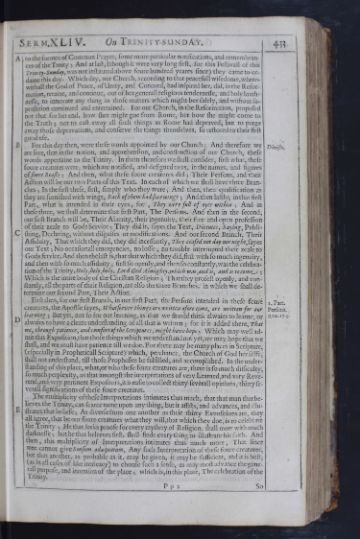 Serm. XLIV.
On Trinity-sunday.
433
to the formes of Common Prayer, some more particular notifications, and remembran-
Serm. XLIV.
On Trinity-sunday.
433
to the formes of Common Prayer, some more particular notifications, and remembran-ces of the Trnity; And at last, (though it were very long first, for this Festivall of this
Trinity-Sunday, was not instituted above foure hundred yeares since) they came to or-
daine this day. Which day, our Church, according to that peacefull wisedome, where-
withall the God of Peace, of Unity, and Concord, had inspired her, did, in the Refor-
mation, retaine, and continue, out of her generall religious tendernesse, and holy loath-
nesse, to innovate any thing in those matters which might bee safely, and without su-
perstition continued and entertained. For our Church, in the Reformation, proposed
not that for her end, how shee might goe from Rome, but how she might come to
the Truth; nor to cast away all such things as Rome had depraved, but to purge
away those depravations, and conserve the things themselves, so restored to their first
good use.
For this day then, were these words appointed by our Church;Divisio. And therefore we
are sure, that in the notion, and apprehension, and construction of our Church, these
words appertaine to the Trinity. In them therefore we shall consider, first what, these
foure creatures were, which are notified, and designed to us, in the names, and figures
of foure Beasts; And then, what these foure creatures did; Their Persons, and their
Action will be our two Parts of this Text. In each of which we shall have three Bran-
ches; In the first these, first, simply who they were; And then, their qualification as
they are furnished with wings, Each of them had sixe wings; And then lastly, in that first
Part, what is intended in their eyes, for, They were full of eyes within; And in
these three, we shall determine that first Part, The Persons. And then in the second,
our first Branch will be, Their Alacrity, their ingenuity, their free and open profession
of their zeale to Gods Service; They did it, sayes the Text, Dicentes, Saying, Publi-
shing, Declaring; without disguises or modifications. And our second Branch, Their
Assiduity, That which they did, they did incessantly, They ceased not day nor night, sayes
our Text; No occasionall emergencies, no losse, no trouble interrupted their zeale to
Gods service. And then the last is, that that which they did, first with so much ingenuity,
and then with so much assiduity, first so openly, and then so constantly, was the celebra-
tion of the Trinity, Holy, holy, holy, Lord God Almighty, which was, and is, and is to come;
Which is the intire body of the Christan Religion? That they profest openly, and con-
stantly, all the parts of their Religion, are also the three Branches, in which we shall de-
termine our second Part, Their Action.
First then, for our first Branch, in our first Part, 1. Part.
Persons. the Persons intended in these foure
creatures, the Apostle sayes, Rom. 15.4. Whatsoever things are written afore time, are written for our
learning; But yet, not so for our learning, as that we should think alwaies to learne, or
alwaies to have a cleare understanding of all that is written; for it is added there, That
we, through patience, and comfort of the Scriptures, might have hope; Which may well ad-
mit this Exposition, that those things which we understand not yet, we may hope that we
shall, and we must have patience till we doe. For there may be many places in Scripture,
(especially in Propheticall Scripture) which, perchance, the Church of God her selfe,
shall not understand, till those Prophesies be fulfilled, and accomplished. In the under-
standing of this place, what, or who these foure creatures are, there is so much difficulty,
so much perplexity, as that amongst the interpretations of very Learned, and very Reve-
rend, and very pertinent Expositors, it is easie to collect thirty severall opinions, thirty se-
verall significations of these foure creatures.
The multiplicity of these Interpretations intimates thus much, that that man that be-
lieves the Trinity, can scarce turne upon any thing, but it assists, and advances, and illu-
strates that beliefe; As diverse from one another as their thirty Expositions are, they
all agree, that be our foure creatures what they will, that which they doe, is to celebrate
the Trinity; He that seeks proofe for every mystery of Religion, shall meet with much
darknesse; but he that beleeves first, shall finde every thing to illustrate his faith. And
then, this multiplicity of Interpretations intimates thus much more, That since
wee cannot give Sonsum adæquatum, Any such Interpretation of these foure creatures,
but that another, as probable as it, may be given, it may be sufficient, and it is best,
(as in all cases of like intricacy) to choose such a sense, as may most advance the gene-
rall purpose, and intention of the place; which is, in this place, The celebration of the
Trinity. Pp2 So
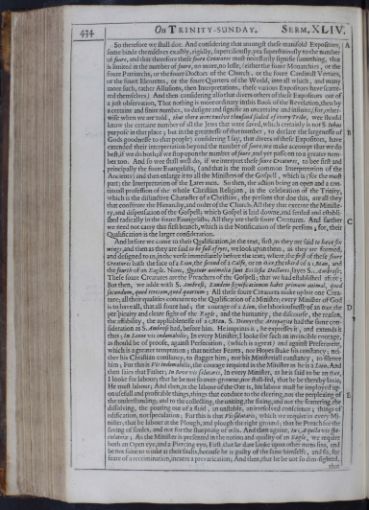 434
On Trinity-sunday.
Serm. XLIV.
So therefore we shall doe. And considering that amongst these manifold Expositors,
434
On Trinity-sunday.
Serm. XLIV.
So therefore we shall doe. And considering that amongst these manifold Expositors,
some binde themselves exactly, rigidly, superciliously, yea superstitiously to the number
of foure, and that therefore these foure Creatures must necessarily signifie something, that
is limited in the number of foure, no more, no lesse, (either the foure Monarchies, or the
foure Patriarchs, or the foure Doctors of the Church, or the foure Cardinall Vertues,
or the foure Elements, or the foure Quarters of the World, into all which, and many
more such, rather Allusions, then Interpretations, these various Expositors have scatte-
red themselves) And then considering also that divers others of these Expositors out of
a just observation, That nothing is more ordinary in this Book of the Revelation, then by
a certaine and finite number, to designe and signifie an uncertaine and infinite, (for, other-
wise when we are told, that there were twelve thousand sealed of every Tribe, wee should
know the certaine number of all the Jews that were saved, which certainly is not S. Iohns
purpose in that place; but in the greatnesse of that number, to declare the largenesse of
Gods goodnesse to that people) considering I say, that divers of these Expositors, have
extended their interpretation beyond the number of foure, we make accompt that we do
best, if we do both; if we stop upon the number of foure, and yet passe on to a greater num-
ber too. And so wee shall well do, if we interpret these foure Creatures, to bee first and
principally the foure Euangelists, (and that is the most common Interpretation of the
Ancients) and then enlarge it to all the Ministers of the Gospell, which is (for the most
part) the Interpretation of the Later men. So then, the action being an open and a con-
tinuall profession of the whole Christian Religion, in the celebration of the Trinity,
which is the distinctive Character of a Christian, the persons that doe this, are all they
that constitute the Hierarchy, and order of the Church; All they that execute the Ministe-
ry, and dispensation of the Gospell; which Gospel is laid downe, and settled and establi-
shed radically in the foure Euangelists; All they are these foure Creatures. And farther
we need not carry this first branch, which is the Notification of these persons; for, their
Qualification is the larger consideration.
And before we come to their Qualification, in the text, first, as they are said to have six
wings, and then as they are said to be full of eyes, we look upon them, as they are formed,
and designed to us, in the verse immediately before the text; where, the first of these foure
Creatures hath the face of a Lion, the second of a Calfe, or an Oxe, the third of a Man, and
the fourth of an Eagle. Now, Quatuor animalia sunt Ecclesiæ Doctores, sayes S. Ambrose;
These foure Creatures are the Preachers of the Gospell; that we had established afore;
But then, we adde with S. Ambrose, Eandem significationem habet primum animal, quod
secundum, quod tertium, quod quartum; All these foure Creatures make up but one Crea-
ture; all their qualities concurre to the Qualification of a Minister; every Minister of God
is to have all, that all foure had; the courage of a Lion, the laboriousnesse of an Oxe, the
perspicuity and cleare sight of the Eagle, and the humanity, the discourse, the reason,
the affability, the appliablenesse of a Man. S. Dionys the Areopagite had the same con-
sideration as S. Ambrose had, before him. He imprints it, he expresses it, and extends it
thus; In Leone vis indomabilis; In every Minister, I looke for such an invincible courage,
as should be of proofe, against Persecution, (which is a great) and against Preferment,
which is a greater temptation; that neither Feares, nor Hopes shake his constancy; nei-
ther his Christian constancy, to stagger him, nor his Ministeriall constancy, to silence
him; For this is Vis indomabilis, the courage required in the Minister as he is a Lion. And
then saies that Father; In Bove vis salutaris, In every Minister, as he is said to be an Oxe,
I looke for labour; that he be not so over-growne, nor stall-fed, that he be thereby lazie;
He must labour; And then, as the labour of the Oxe is, his labour must be imployed up-
on usefull and profitable things, things that conduce to the cleering, not the perplexing of
the understanding; and to the collecting, the uniting, the fixing, and not the scattering, the
dissolving, the pouring out of a fluid, an unstable, an irresolved conscience; things of
edification, not speculation; For this is that Vis salutaris, which we require in every Mi-
nister; that he labour at the Plough, and plough the right ground; that he Preach for the
saving of soules, and not for the sharpning of wits. And then againe, In Aquila vis spe-
culatrix; As the Minister is presented in the notion and quality of an Eagle, we require
both an Open eye, and a Piercing eye; First, that he date looke upon other mens sins, and
be not faine to winke at their faults, because he is guilty of the same himselfe, and so, for
feare of a recrimination, incurre a prevarication; And then, that he be not so dim-sighted, that
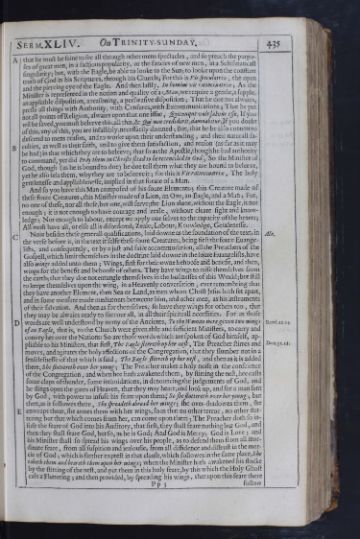 Serm. XLIV.
On Trinity-sunday.
435
that he must be faine to see all through other mens spectacles, and so preach the purpo-
Serm. XLIV.
On Trinity-sunday.
435
that he must be faine to see all through other mens spectacles, and so preach the purpo-ses of great men, in a factious popularity, or the fancies of new men, in a Schismaticall
singularity; but, with the Eagle, be able to looke to the Sun; to looke upon the constant
truth of God in his Scriptures, through his Church; For this is Vis speculatrix, the open
and the piercing eye of the Eagle. And then lastly, In homine vis ratiocinatrix; As the
Minister is represented in the notion and quality of a Man, we require a gentle, a supple,
an appliable disposition, a reasoning, a perswasive disposition; That he doe not alwaies,
presse all things with Authority, with Censures, with Excommunications; That he put
not all points of Religion, alwaies upon that one issue, Quicunque vult salvus esse, If you
wil be saved, you must beleeve this, all this, & Qui non credider it, damnabitur, If you doubt
of this, any of this, you are infallibly, necessarily damned; But, that he be also content to
descend to mens reason, and to worke upon their understanding, and their naturall fa-
culties, as well as their faith, and to give them satisfaction, and reason (as far as it may
be had) in that which they are to beleeve; that so as the Apostle, though he had authority
to command, yet did Pray them in Christs stead to be reconciled to God, So the Minister of
God, though (as he is bound to doe) he doe tell them what they are bound to beleeve,
yet he also tels them, why they are to beleeve it; for this is Vis ratiocinatrix, The holy
gentlenesse and appliablenesse, implied in that forme of a Man.
And so you have this Man composed of his foure Elements; this Creature made of
these foure Creatures; this Minister made of a Lion, an Oxe, an Eagle, and a Man; For,
no one of these, nor all these, but one, will serve; the Lion alone, without the Eagle, is not
enough; it is not enough to have courage and zeale, without cleare sight and know-
ledge; Nor enough to labour, except we apply our selves to the capacity of the hearer;
All must have all, or else all is disordered; Zeale, Labour, Knowledge, Gentlenesse.
Now besides these generall qualifications, laid downe as the foundation of the text, Alæ. in
the verse before it, in the text it selfe these foure Creatures, being first the foure Euange-
lists, and consequently, or by a just and faire accommodation, all the Preachers of the
Gospell, which limit themselves in the doctrine laid downe in the foure Euangelists, have
also wings added unto them; Wings, first for their owne behoofe and benefit, and then,
wings for the benefit and behoofe of others. They have wings to raise themselves from
the earth; that they doe not entangle themselves in the businesses of this World; but still
to keepe themselves upon the wing, in a Heavenly conversation, ever remembring that
they have another Element, then Sea or Land, as men whom Christ Jesus hath set apart,
and in some measure made mediatours betweene him, and other men, as his instruments
of their salvation. And then as for themselves, so have they wings for others too, that
they may be alwaies ready to succour all, in all their spirituall necessities. For as those
words are well understood by many of the Ancients, Revel. 12.14. To the Woman were given two wings
of an Eagle, that is, to the Church were given able and sufficient Ministers, to carry and
convey her over the Nations: So are those words which are spoken of God himself, ap-
pliable to his Ministers, that first, The Eagle stirreth up her nest,Deut. 32.11. The Preacher stirres and
moves, and agitates the holy affections of the Congregation, that they slumber not in a
senselesnesse of that which is said, The Eagle stirreth up her nest, and then as it is added
there, She fluttereth over her young; The Preacher makes a holy noise in the conscience
of the Congregation, and when hee hath awakened them, by stirring the nest, hee casts
some claps of thunder, some intimidations, in denouncing the judgements of God, and
he flings open the gates of Heaven, that they may heare, and look up, and see a man sent
by God, with power to infuse his feare upon them; So she fluttereth over her young; but
then, as it followes there, She spreadeth abroad her wings; she over-shadowes them, she
enwraps them, she armes them with her wings, so as that no other terror, no other flut-
tering but that which comes from her, can come upon them; The Preacher doth so in-
fuse the feare of God into his Auditory, that first, they shall feare nothing but God, and
then they shall feare God, but so, as he is God; And God is Mercy; God is Love; and
his Minister shall so spread his wings over his people, as to defend them from all inor-
dinate feare, from all suspition and jealousie, from all diffidence and distrust in the mer-
cie of God; which is farther exprest in that clause, which followes in the same place, She
taketh them and beareth them upon her wings; when the Minister hath awakened his flocke
by the stirring of the nest, and put them in this holy feare, by this which the Holy Ghost
cals a Fluttering; and then provided, by spreading his wings, that upon this feare there Pp3 follow
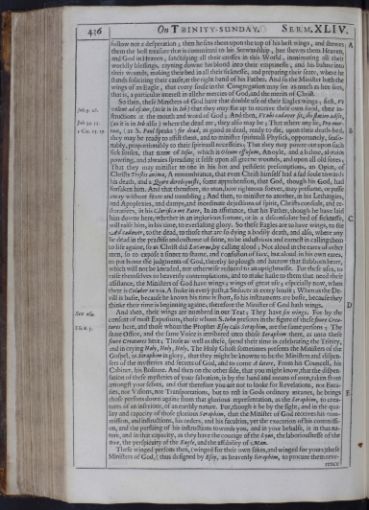 436
On Trinity-sunday.
Serm. XLIV.
follow not a desperation; then he sets them upon the top of his best wings, and shewes
436
On Trinity-sunday.
Serm. XLIV.
follow not a desperation; then he sets them upon the top of his best wings, and shewes
them the best treasure that is committed to his Stewardship, hee shewes them Heaven,
and God in Heaven, sanctifying all their crosses in this World, inanimating all their
worldly blessings, rayning downe his blood into their emptinesse, and his balme into
their wounds, making their bed in all their sicknesse, and preparing their seate, where he
stands soliciting their cause, at the right hand of his Father. And so the Minister hath the
wings of an Eagle, that every soule in the Congregation may see as much as hee sees,
that is, a particular interest in all the mercies of God, and the merits of Christ.
So then, these Ministers of God have that double use of their Eagles wings; first, Vt
volent ad escam,Job 9.26. (as it is in Iob) that they may flie up to receive their own food, their in-
structions at the mouth and word of God; And then, Vt ubi cadaver sit, ibi statim adsit,
(as it is in Iob also) where the dead are, Job 39.33. they also may be; That where any lie, Pro mor-
tuis, (as S. Paul speaks) for dead,1 Cor. 13.29. as good as dead, ready to die, upon their death-bed,
they may be ready to assist them, and to minister spirituall Physick, opportunely, seaso-
nably, proportionably to their spirituall necessities; That they may powre out upon such
sick soules, that name of Iesus, which is Oleum effusum, An oyle, and a balme, alwaies
powring, and alwaies spreading it selfe upon all greene wounds, and upon all old sores;
That they may minister to one in his hot and pestilent presumptions, an Opiat, of
Christs Tristis anima, A remembrance, that even Christ himself had a sad soule towards
his death, and a Quare dereliquisti, some apprehension, that God, though his God, had
forsaken him. And that therefore, no man, how righteous soever, may presume, or passe
away without feare and trembling; And then, to minister to another, in his Lethargies,
and Apoplexies, and damps, and inordinate dejections of spirit, Christs cordials, and re-
storatives, in his Clarifica me Pater, In an assurance, that his Father, though he have laid
him downe here, whether in an inglorious fortune, or in a disconsolate bed of sicknesse,
will raise him, in his time, to everlasting glory. So these Eagles are to have wings, to flie
Ad cadaver, to the dead, to those that are so dying a bodily death, and also, where any
lie dead in the practise and custome of sinne, to be industrious and earnest in calling them
to life againe, so as Christ did Lazarus, by calling aloud; Not aloud in the eares of other
men, so to expose a sinner to shame, and confusion of face, but aloud in his own eares,
to put home the judgments of God, thereby to plough and harrow that stubborn heart,
which will not be kneaded, nor otherwise reduced to an uprightnesse. For these uses, to
raise themselves to heavenly contemplations, and to make haste to them that need their
assistance, the Ministers of God have wings; wings of great use; especially now, when
there is Coluber in via, A snake in every path, a Seducer in every house; When as the De-
vill is busie, because he knows his time is short, so his instruments are busie, because they
thinke their time is beginning againe; therefore the Minister of God hath wings.
And then, Sex alæ. their wings are numbred in our Text; They have six wings. For by the
consent of most Expositors, those whom S. Iohn presents in the figure of these foure Crea-
tures here, Esa. 6.3. and those whom the Prophet Esay cals Seraphim, are the same persons; The
same Office, and the same Voice is attributed unto those Seraphim there, as unto these
foure Creatures here; Those as well as these, spend their time in celebrating the Trinity,
an in crying Holy, Holy, Holy. The Holy Ghost sometimes presents the Ministers of the
Gospel, as Seraphim in glory, that they might be knowne to be the Ministers and dispen-
sers of the mysteries and secrets of God, and to come A latere, From his Councell, his
Cabinet, his Bosome. And then on the other side, that you might know, that the dispen-
sation of these mysteries of your salvation, is by the hand and means of men, taken from
amongst your selves, and that therefore you are not to looke for Revelations, nor Exta-
sies, nor Visions, nor Transportations, but to rest in Gods ordinary meanes, he brings
those persons down againe from that glorious representation, as the Seraphim, to crea-
tures of an inferiour, of an earthly nature. For, though it be by the sight, and in the qua-
lity and capacity of those glorious Seraphim, that the Minister of God receives his com-
mission, and instructions, his orders, and his faculties, yet the execution of his commissi-
on, and the pursuing of his instructions towards you, and in your behalfe, is in that na-
ture, and in that capacity, as they have the courage of the Lyon, the laboriousnesse of the
Oxe, the perspicuity of the Eagle, and the affability of Man.
These winged persons then, (winged for their own sakes, and winged for yours) these
Ministers of God, (thus designed by Esay, as heavenly Seraphim, to procure them reve-
rence
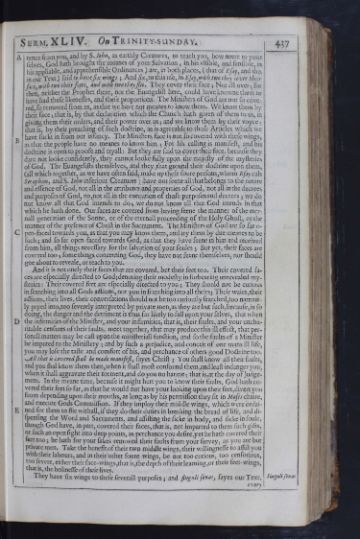 Serm. XLIV.
On Trinity-sunday.
437
rence from you, and by S. Iohn, as earthly Creatures, to teach you, how neere to your
Serm. XLIV.
On Trinity-sunday.
437
rence from you, and by S. Iohn, as earthly Creatures, to teach you, how neere to your
selves, God hath brought the meanes of your Salvation, in his visible, and sensible, in
his appliable, and apprehensible Ordinances) are, in both places, (that of Esay, and this
in our Text) said to have six wings; And six, to this use, in Esay, with two they cover their
face, with two their feete, and with two they flie. They cover their face; Not all over; for
then, neither the Prophet there, nor the Euangelist here, could have knowne them to
have had these likenesses, and these proportions. The Ministers of God are not so cove-
red, so removed from us, as that we have not meanes to know them. We know them by
their face; that is, by that declaration which the Church hath given of them to us, in
giving them their orders, and their power over us; and we know them by their voyce;
that is, by their preaching of such doctrine, as is agreeable to those Articles which we
have suckt in from our infancy. The Ministers face is not so covered with these wings,
as that the people have no meanes to know him; For his calling is manifest, and his
doctrine is open to proofe and tryall: But they are said to cover their face, because they
dare not looke confidently, they cannot looke fully upon the majesty of the mysteries
of God. The Euangelists themselves, and they that ground their doctrine upon them,
(all which together, as we have often said, make up these foure persons, whom Esay cals
Seraphim, and S. Iohn inferiour Creatures) have not seene all that belongs to the nature
and essence of God, not all in the attributes and properties of God, not all in the decrees
and purposes of God, no, not all in the execution of those purposes and decrees; we do
not know all that God intends to do; we do not know all that God intends in that
which he hath done. Our faces are covered from having seene the manner of the eter-
nall generation of the Sonne, or of the eternall proceeding of the Holy Ghost, or the
manner of the presence of Christ in the Sacrament. The Ministers of God are so far o-
pen-faced towards you, as that you may know them, and try them by due meanes to be
such; and so far open-faced towards God, as that they have seene in him and received
from him, all things necessary for the salvation of your soules; But yet, their faces are
covered too; somethings concerning God, they have not seene themselves, nor should
goe about to reveale, or teach to you.
And it is not onely their faces that are covered, but their feet too. Their covered fa-
ces are especially directed to God; denoting their modesty in forbearing unrevealed my-
steries: Their covered feet are especially directed to you; They should not be curious
in searching into all Gods actions, nor you in searching into all theirs; Their waies, their
actions, their lives, their conversations should not be too curiously searched, too narrow-
ly pryed into, too severely interpreted by private men, as they are but such, because, in so
doing, the danger and the detriment is thus far likely to fall upon your selves, that when
the infirmities of the Minister, and your infirmities, that is, their faults, and your uncha-
ritable censures of their faults, meet together, that may produce this ill effect, that per-
sonall matters may be cast upon the ministeriall function, and so the faults of a Minister
be imputed to the Ministery; and by such a prejudice, and conceit of one mans ill life,
you may lose the taste and comfort of his, and perchance of others good Doctrine too.
All that is covered shall be made manifest, sayes Christ; You shall know all their faults,
and you shal know them then, when it shall most confound them, and least indanger you,
when it shall aggravate their torment, and do you no harme; that is, at the day of Judge-
ment. In the meane time, because it might hurt you to know their faults, God hath co-
vered their feet so far, as that he would not have your looking upon their feet, divert you
from depending upon their mouths, as long as by his permission they sit in Moses chaire,
and execute Gods Commission. If they imploy their middle wings, which were ordai-
ned for them to flie withall, if they do their duties in breaking the bread of life, and di-
spensing the Word and Sacraments, and assisting the sicke in body, and sicke in soule,
though God have, in part, covered their faces, that is, not imparted to them such gifts,
or such an open sight into deep points, as perchance you desire, yet he hath covered their
feet too; he hath for your sakes removed their faults from your survey, as you are but
private men. Take the benefit of their two middle wings, their willingnesse to assist you
with their labours, and in their other foure wings, be not too curious, too censorious,
too severe, either their face-wings, that is, the depth of their learning, or their feet-wings,
that is, the holinesse of their lives.
They have six wings to these severall purposes;Singuli senas and singuli senas, sayes our Text, every
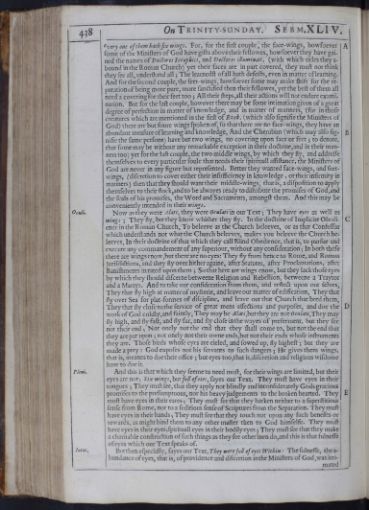 438
On Trinity-sunday.
Serm. XLIV.
every one of them hath six wings. For, for the first couple, the face-wings, howsoever
438
On Trinity-sunday.
Serm. XLIV.
every one of them hath six wings. For, for the first couple, the face-wings, howsoever
some of the Ministers of God have gifts above their fellowes, howsoever they have gai-
ned the names of Doctores Seraphici, and Doctores illuminati, (with which titles they a-
bound in the Roman Church) yet their faces are in part covered, they must not think
they see all, understand all; The learnedst of all hath defects, even in matter of learning.
And for the second couple, the feet-wings, howsoever some may make shift for the re-
putation of being more pure, more sanctified then their fellowes, yet the best of them all
need a covering for their feet too; All their steps, all their actions will not endure exami-
nation. But for the last couple, however there may be some intimation given of a great
degree of perfection in matter of knowledge, and in matter of manners, (for in those
creatures which are mentioned in the first of Ezek. (which also signifie the Ministers of
God) there are but foure wings spoken of, so that there are no face-wings, they have an
abundant measure of learning and knowledge, And the Cherubim (which may also sig-
nifie the same persons) have but two wings, no covering upon face or feet; to denote,
that some may be without any remarkable exception in their doctrine, and in their man-
ners too) yet for the last couple, the two middle wings, by which they fly, and addresse
themselves to every particular soule that needs their spirituall assistance, the Ministers of
God are never in any figure but represented. Better they wanted face-wings, and feet-
wings, (discretion to cover either their insufficiency in knowledge, or their infirmity in
manners) then that they should want their middle-wings, that is, a disposition to apply
themselves to their flock, and to be alwayes ready to distribute the promises of God, and
the seals of his promises, the Word and Sacraments, amongst them. And this may be
conveniently intended in their wings.
Oculi. Now as they were Alati, they were Oculati in our Text; They have eyes as well as
wings; They fly, but they know whither they fly. In the doctrine of Implicite Obedi-
ence in the Roman Church, To beleeve as the Church beleeves, or as that Confessor
which understands not what the Church beleeves, makes you beleeve the Church be-
leeves, In their doctrine of that which they call Blind Obedience, that is, to pursue and
execute any commandement of any superiour, without any consideration; In both these
there are wings enow, but there are no eyes: They fly from hence to Rome, and Roman
Jurisdictions, and they fly over hither againe, after Statutes, after Proclamations, after
Banishments iterated upon them; So that here are wings enow, but they lack those eyes
by which they should discerne betweene Religion and Rebellion, betweene a Traytor
and a Martyr. And to take our consideration from them, and reflect upon our selves,
They that fly high at matter of mysterie, and leave out matter of edification, They that
fly over Sea for plat-formes of discipline, and leave out that Church that bred them,
They that fly close to the service of great mens affections and purposes, and doe the
work of God coldly, and faintly, They may be Alati, but they are not Oculati, They may
fly high, and fly fast, and fly far, and fly close in the wayes of preferment, but they see
not their end; Not onely not the end that they shall come to, but not the end that
they are put upon; not onely not their owne ends, but not their ends whose instruments
they are. Those birds whose eyes are cieled, and sowed up, fly highest; but they are
made a prey: God exposes not his servants to such dangers; He gives them wings,
that is, meanes to doe their office; but eyes too, that is, discretion and religious wisdome
how to doe it.
Pleni. And this is that which they seeme to need most, for their wings are limited, but their
eyes are not; Six wings, but full of eies, sayes our Text. They must have eyes in their
tongues; They must see, that they apply not blindly and inconsiderately Gods gracious
promises to the presumptuous, nor his heavy judgements to the broken hearted. They
must have eyes in their eares; They must see that they harken neither to a superstitious
sense from Rome, nor to a seditious sense of Scriptures from the Separation. They must
have eyes in their hands; They must see that they touch not upon any such benefits or
rewards, as might bind them to any other master then to God himselfe. They must
have eyes in their eyes; spirituall eyes in their bodily eyes; They must see that they make
a charitable construction of such things as they see other men do, and this is that fulnesse
of eyes which our Text speaks of.
Intus. But then especially, sayes our Text, They were full of eyes Within: The fulnesse, the a-
bundance of eyes, that is, of providence and discretion in the Ministers of God, was inti-
mated
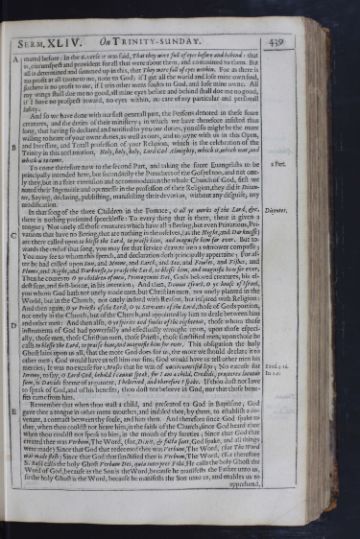 Serm. XLIV.
On Trinity-sunday.
439
mated before: In the 6. verse it was said, That they were full of eyes before and behind: that
Serm. XLIV.
On Trinity-sunday.
439
mated before: In the 6. verse it was said, That they were full of eyes before and behind: that
is, circumspect and provident for all that were about them, and committed to them. But
all is determined and summed up in this, that They were full of eyes within. For as there is
no profit at all (none to me, none to God) if I get all the world and lose mine own soul,
so there is no profit to me, if I win other mens soules to God, and lose mine owne. All
my wings shall doe me no good, all mine eyes before and behind shall doe me no good,
if I have no prospect inward, no eyes within, no care of my particular and personall
safety.
And so we have done with our first generall part, the Persons denoted in these foure
creatures, and the duties of their ministery; in which we have therefore insisted thus
long, that having so declared and notified to you our duties, you also might be the more
willing to heare of your owne duties, as well as ours, and to joyne with us in this Open,
and Incessant, and Totall profession of your Religion, which is the celebration of the
Trinity in this acclamation, Holy, holy, holy, Lord God Almighty, which is, which was, and
which is to come.
To come therefore now to the second Part, 2 Part. and taking the foure Euangelists to be
principally intended here, but secundarily the Preachers of the Gospel too, and not one-
ly they, but in a faire extension and accommodation the whole Church of God, first we
noted their Ingenuitie and opennesse in the profession of their Religion, they did it Dicen-
tes Saying, declaring, publishing, manifesting their devotion, without any disguise, any
modification.
In that song of the three Children in the Fornace, Dicentes. O all ye works of the Lord, &c.
there is nothing presented speechlesse: To every thing that is there, there is given a
tongue; Not onely all those creatures which have all a Beeing, but even Privations, Pri-
vations that have no Beeing, that are nothing in themselves, (as the Night, and Darknesse)
are there called upon to blesse the Lord, to praise him, and magnifie him for ever. But to-
wards the end of that song, you may see that service drawne into a narrower compasse;
You may see to whom this speech, and declaration doth principally appertaine; For af-
ter he had called upon Sun, and Moone, and Earth, and Sea, and Fowles, and Fishes, and
Plants, and Night, and Darknesse, to praise the Lord, to blesse him, and magnifie him for ever,
Then he comes to O ye children of men, Primogeniti Dei, Gods beloved creatures, his el-
dest sons, and first-borne, in his intention; And then, Domus Israel, O ye house of Israel,
you whom God hath not onely made men, but Christian men, not onely planted in the
World, but in the Church, not onely indued with Reason, but inspired with Religion:
And then again, O ye Priests of the Lord, O ye Servants of the Lord, those of Gods portion,
not onely in the Church, but of the Church, and appointed by him to deale between him
and other men: And then also, O ye spirits and soules of the righteous, those whom those
instruments of God had powerfully and effectually wrought upon, upon those especi-
ally, those men, those Christian men, those Priests, those sanctified men, upon those he
calls to blesse the Lord, to praise him, and magnifie him for ever. This obligation the holy
Ghost laies upon us all, that the more God does for us, the more we should declare it to
other men; God would have us tell him our sins; God would have us tell other men his
mercies; It was no excuse for Moses that he was of uncircumcised lips;Exod. 5.12. No excuse for
Ieremy, to say, O Lord God, behold I cannot speak, for I am a child. Ier. 1.6. Credidi, propterea locutus
sum, is Davids forme of argument, I beleeved, and therefore I spake. If thou dost not love
to speak of God, and of his benefits, thou dost not beleeve in God, nor that those bene-
fits came from him.
Remember that when thou wast a child, and presented to God in Baptisme, God
gave thee a tongue in other mens mouthes, and inabled thee, by them, to establish a co-
venant, a contract between thy soule, and him then. And therefore since God spake to
thee, when thou couldst not heare him, in the faith of the Church; since God heard thee
when thou couldst not speak to him, in the mouth of thy sureties; Since that God that
created thee was Verbum, The Word, (for, Dixit, & facta sunt, God spake, and all things
were made) Since that God that redeemed thee was Verbum, The Word, (for The Word
was made flesh) Since that God that sanctified thee is Verbum, The Word, (for therefore
S. Basil calls the holy Ghost Verbum Dei, quia interpres Filii, He calls the holy Ghost the
Word of God, because as the Son is the Word, because he manifests the Father unto us,
so the holy Ghost is the Word, because he manifests the Son unto us, and enables us to apprehend,
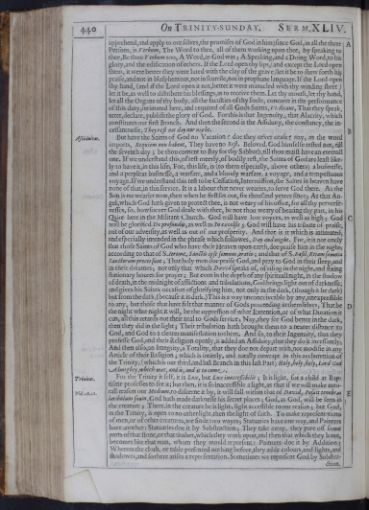 440
On Trinity-sunday.
Serm. XLIV.
apprehend, and apply to our selves, the promises of God in him) since God, in all the three
440
On Trinity-sunday.
Serm. XLIV.
apprehend, and apply to our selves, the promises of God in him) since God, in all the three
Persons, is Verbum, The Word to thee, all of them working upon thee, by speaking to
thee, Be thou Verbum too, A Word, as God was; A Speaking, and a Doing Word, to his
glory, and the edification of others. If the Lord open thy lips, (and except the Lord open
them, it were better they were luted with the clay of the grave) let it be to shew forth his
praise, and not in blasphemous, not in scurrile, not in prophane language. If the Lord open
thy hand, (and if the Lord open it not, better it were manacled with thy winding sheet)
let it be, as well to distribute his blessings, as to receive them. Let thy mouth, let thy hand,
let all the Organs of thy body, all the faculties of thy soule, concurre in the performance
of this duty, intimated here, and required of all Gods Saints, Vt dicant, That they speak,
utter, declare, publish the glory of God. For this is that Ingenuity, that Alacrity, which
constitutes our first Branch. And then the second is the Assiduity, the constancy, the in-
cessantnesse, They rest not day nor night.
But have the Saints of God no Vacation ?Assiduitas. doe they never cease? nay, as the word
imports, Requiem non habent, They have no Rest. Beloved, God himselfe rested not, till
the seventh day; be thou content to stay for thy Sabbath, till thou maist have an eternall
one. If we understand this, of rest meerly, of bodily rest, the Saints of God are least like-
ly to have it, in this life; For, this life, is (to them especially, above others) a businesse,
and a perplext businesse, a warfare, and a bloody warfare, a voyage, and a tempestuous
voyage. If we understand this rest to be Cessation, Intermission, the Saints in heaven have
none of that, in this service. It is a labour that never wearies, to serve God there. As the
Sun is no wearier now, then when he first set out, six thousand yeares since; As that An-
gel, which God hath given to protect thee, is not weary of his office, for all thy perverse-
nesses, so, howsoever God deale with thee, be not thou weary of bearing thy part, in his
Quire here in the Militant Church. God will have low voyces, as well as high; God
will be glorified De profundis, as well as In excelsis; God will have his tribute of praise,
out of our adversity, as well as out of our prosperity. And that is it which is intimated,
and especially intended in the phrase which followes, Day and night. For, it is not onely
that those Saints of God who have their Heaven upon earth, doe praise him in the night;
according to that of S. Ierome, Sanctis ipse somnus, oratio; and that of S. Basil, Etiam somnia
Sanctorum preces sunt; That holy men doe praise God, and pray to God in their sleep, and
in their dreames; nor only that which David speaks of, of rising in the night, and fixing
stationary houres for prayer; But even in the depth of any spirituall night, in the shadow
of death, in the midnight of afflictions and tribulations, God brings light out of darknesse,
and gives his Saints occasion of glorifying him, not only in the dark, (though it be dark)
but from the dark, (because it is dark.) This is a way unconceiveable by any, unexpressible
to any, but those that have felt that manner of Gods proceeding in themselves, That be
the night what night it will, be the oppression of what Extention, or of what Duration it
can, all this retards not their zeal to Gods service; Nay, they see God better in the dark,
then they did in the light; Their tribulation hath brought them to a nearer distance to
God, and God to a clearer manifestation to them. And so, to their Ingenuity, that they
professe God, and their Religion openly, is added an Assiduity, that they do it incessantly;
And then also, an Integrity, a Totality, that they doe not depart with, nor modifie in any
Article of their Religion; which is intirely, and totally enwrapt in this acclamation of
the Trinity, (which is our third, and last Branch in this last Part) Holy, holy, holy, Lord God
Almighty, which was, and is, and is to come.
For the Trinity it self, Trinitas. it is Lux, but Lux inaccessibilis; It is light, for a child at Bap-
tisme professes to see it; but then, it is so inaccessible a light, as that if we will make natu-
rall reason our Medium,Psal. 18.11. to discerne it by, it will fall within that of David, Posuit tenebras
latibulum suum, God hath made darknesse his secret places; God, as God, will be seen in
the creature; There, in the creature he is light; light accessible to our reason; but God,
in the Trinity, is open to no other light, then the light of faith. To make representations
of men, or of other creatures, we finde two wayes; Statuaries have one way, and Painters
have another: Statuaries doe it by Substraction; They take away, they pare off some
parts of that stone, or that timber, which they work upon, and then that which they leave,
becomes like that man, whom they would represent: Painters doe it by Addition;
Whereas the cloth, or table presented nothing before, they adde colours, and lights, and
shadowes, and so there arises a representation. Sometimes we represent God by Substra-
ction,
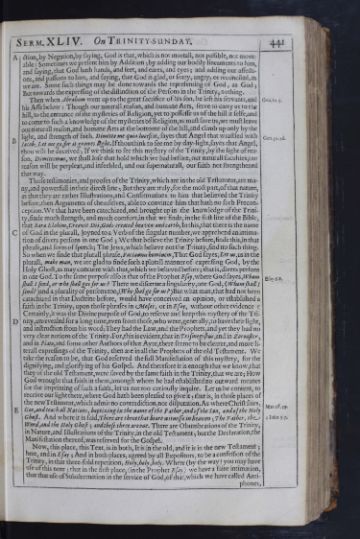 Serm. XLIV.
On Trinity-sunday.
441
ction, by Negation, by saying, God is that, which is not mortall, not passible, not move-
Serm. XLIV.
On Trinity-sunday.
441
ction, by Negation, by saying, God is that, which is not mortall, not passible, not move-able: Sometimes we present him by Addition; by adding our bodily lineaments to him,
and saying, that God hath hands, and feet, and eares, and eyes; and adding our affecti-
ons, and passions to him, and saying, that God is glad, or sorry, angry, or reconciled, as
we are. Some such things may be done towards the representing of God, as God;
But towards the expressing of the distinction of the Persons in the Trinity, nothing.
Then when Abraham went up to the great sacrifice of his son, he left his servants, Gen. 22.5. and
his Asse below: Though our naturall reason, and humane Arts, serve to carry us to the
hill, to the entrance of the mysteries of Religion, yet to possesse us of the hill it selfe, and
to come to such a knowledge of the mysteries of Religion, as must save us, we must leave
our naturall reason, and humane Arts at the bottome of the hill, and climb up only by the
light, and strength of faith. Dimitte me quia lucescit,Gen. 32.26. sayes that Angel that wrastled with
Iacob; Let me go, for it growes light. If thou think to see me by day-light, sayes that Angel,
thou wilt be deceived; If we think to see this mystery of the Trinity, by the light of rea-
son, Dimittemus, we shall lose that hold which we had before, our naturall faculties, our
reason will be perplext, and infeebled, and our supernaturall, our faith not strengthened
that way.
Those testimonies, and proofes of the Trinity, which are in the old Testament, are ma-
ny, and powerfull in their direct line; But they are truly, for the most part, of that nature,
as that they are rather Illustrations, and Confirmations to him that believed the Trinity
before, then Arguments of themselves, able to convince him that hath no such Precon-
ception. We that have been catechized, and brought up in the knowledge of the Trini-
ty, finde much strength, and much comfort, in that we finde, in the first line of the Bible,
that Bara Elohim, Creavit Dii, Gods created heaven and earth; In this, that there is the name
of God in the plurall, joyned to a Verb of the singular number, we apprehend an intima-
tion of divers persons in one God; We that believe the Trinity before, finde this, in that
phrase, and form of speech; The Jews, which believe not the Trinity, find no such thing.
So when we finde that plurall phrase, Faciamus hominem, That God sayes, Let us, us in the
plurall, make man, we are glad to finde such a plurall manner of expressing God, by the
Holy Ghost, as may concurre with that, which we believed before; that is, divers persons
in one God. To the same purpose also is that of the Prophet Esay, where God sayes, Esay 6.8. Whom
shall I send, or who shall goe for us? There we discerne a singularity, one God, (Whom shall I
send?) and a plurality of persons too, (Who shal go for us?) But what man, that had not been
catachized in that Doctrine before, would have conceived an opinion, or established a
faith in the Trinity, upon those phrases in Moses, or in Esay, without other evidence?
Certainly, it was the Divine purpose of God, to reserve and keep this mystery of the Tri-
nity, unrevealed for a long time, even from those, who were, generally, to have their light,
and instruction from his word; They had the Law, and the Prophets, and yet they had no
very clear notions of the Trinity. For, this is evident, that in Trismegistus, and in Zoroaster,
and in Plato, and some other Authors of that Ayre, there seeme to be clearer, and more li-
terall expressings of the Trinity, then are in all the Prophets of the old Testament. We
take the reason to be, that God reserved the full Manifestation of this mystery, for the
dignifying, and glorifying of his Gospel. And therefore it is enough that we know, that
they of the old Testament, were saved by the same faith in the Trinity, that we are; How
God wrought that faith in them, amongst whom he had established no outward meanes
for the imprinting of such a faith, let us not too curiously inquire. Let us be content, to
receive our light there, where God hath been pleased to give it; that is, in those places of
the new Testament, which admit no contradiction, nor disputation. As where Christ saies,
Mat. 28.19. Goe, and teach all Nations, baptizing in the name of the Father, and of the Son, and of the Holy
Ghost. And where it is said, There are three that beare witnesse in heaven; The Father,1 Iohn 5.7. the
Word, and the Holy Ghost; and these three are one. There are Obumbrations of the Trinity,
in Nature, and Illustrations of the Trinity, in the old Testament; but the Declaration, the
Manifestation thereof, was reserved for the Gospel.
Now, this place, this Text, is in both, It is in the old, and it is in the new Testament;
here, and in Esay; And in both places, agreed by all Expositors, to be a confession of the
Trinity, in that three-fold repetition, Holy, holy, holy. Where (by the way) you may have
use of this note; that in the first place, (in the Prophet Esay) we have a faire intimation,
that that use of Subalternation in the service of God, of that, which we have called Anti-
phones,
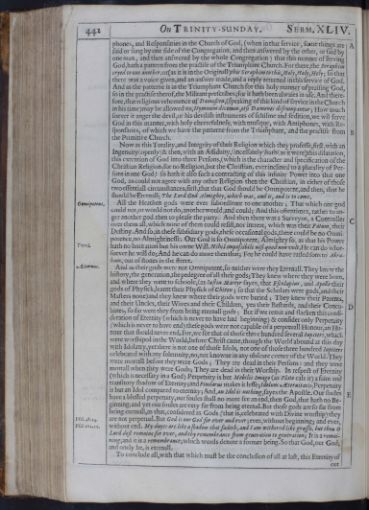 442
On Trinity-sunday.
Serm. XLIV.
phones, and Responsaries in the Church of God, (when in that service, some things are
442
On Trinity-sunday.
Serm. XLIV.
phones, and Responsaries in the Church of God, (when in that service, some things are
said or sung by one side of the Congregation, and then answered by the other, or said by
one man, and then answered by the whole Congregation) that this manner of serving
God, hath a pattern from the practise of the Triumphant Church. For there, the Seraphim
cryed to one another, or (as it is in the Originall) this Seraphim to this, Holy, Holy, Holy; so that
there was a voice given, and an answer made, and a reply returned in this service of God.
And as the patterne is in the Triumphant Church for this holy manner of praising God,
so in the practise therof, the Militant prescribes; for it hath been alwaies in use. And there-
fore, that religious vehemence of Damascen, (speaking of this kind of service in the Church
in his time) may be allowed us, Hymnum dicemus, etsi Dæmones disrumpantur; How much
soever it anger the devil, or his devilish instruments of schisme and sedition, we wil serve
God in this manner, with holy cheerefulness, with musique, with Antiphones, with Re-
sponsaries, of which we have the patterne from the Triumphant, and the practise from
the Primitive Church.
Now as this Totality, and Integrity of their Religion which they professe, first, with an
Ingenuity (openly) & then, with an Assiduity, (incessantly) hath (as it were) this dilatation,
this extention of God into three Persons, (which is the character and specification of the
Christian Religion; for no Religion, but the Christian, ever inclined to a plurality of Per-
sons in one God) so hath it also such a contracting of this infinite Power into that one
God, as could not agree with any other Religion then the Christian, in either of those
two essentiall circumstances; first, that that God should be Omnipotent, and then, that he
should be Eternall; The Lord God Almighty, which was, and is, and is to come.
All the Heathen gods were ever subordinate to one another;Omnipotens. That which one god
could not, or would not do, another would, and could; And this oftentimes, rather to an-
ger another god, then to please the party. And then there was a Surveyor, a Controller
over them all, which none of them could resist, nor intreat, which was their Fatum, their
Destiny. And so, in these subsidiary gods, these occasional gods, there could be no Omni-
potence, no Almightinesse. Our God is so Omnipotent, Almighty so, as that his Power
hath no limitation but his owne Will.Tertul. Nihil impossibile nisi quod non vult, He can do what-
soever he will do; And he can do more then that; For he could have raised sons to Abra-
ham, out of stones in the street.
And as their gods were not Omnipotent, Æternus. so neither were they Eternall. They knew the
history, the generation, the pedegree of all their gods; They knew where they were born,
and where they went to schoole, (as Iustin Martyr sayes, that Esculapius, and Apollo their
gods of Physick, learnt their Physick of Chiron; so that the Scholars were gods, and their
Masters none) and they knew where their gods were buried; They knew their Parents,
and their Uncles, their Wives and their Children, yea their Bastards, and their Concu-
bines; so far were they from being eternall gods; But if we remit and slacken this consi-
deration of Eternity (which is never to have had beginning) & consider only Perpetuity
(which is never to have end) these gods were not capable of a perpetuall Honour, an Ho-
nour that should never end. For, we see that of those three hundred several Iupiters, which
were worshiped in the World, before Christ came, though the World abound at this day
with Idolatry, yet there is not one of those Idols, not one of those three hundred Iupiters
celebrated with any solemnity, no, not knowne in any obscure corner of the World. They
were mortall before they were Gods; They are dead in their Persons: and they were
mortall when they were Gods; They are dead in their Worship. In respect of Eternity
(which is necessary in a God) Perpetuity is but Mobilis Imago (as Plato cals it) a faint and
transitory shadow of Eternity; and Pindarus makes it lesse; Idolum Æternitatis; Perpetuity
is but an Idol compared to eternity; And, an Idol is nothing, sayes the Apostle. Our soules
have a blessed perpetuity, our soules shall no more see an end, then God, that hath no Be-
ginning; and yet our soules are very far from being eternal. But those gods are so far from
being eternall, as that, considered as Gods (that is, celebrated with Divine worship) they
are not perpetual.Psal. 48.14. But God is our God for ever and ever; ever, without beginning; and ever,
without end. Psal 102.11. My dayes are like a shadow that fadeth, and I am withered like grasse; but thou O
Lord dost remaine for ever, and thy remembrance from generation to generation; It is a remai-
ning, and it is a remembrance; which words denote a former being. So that God, our God,
and onely he, is eternall.
To conclude all, with that which must be the conclusion of all at last, this Eternity of our
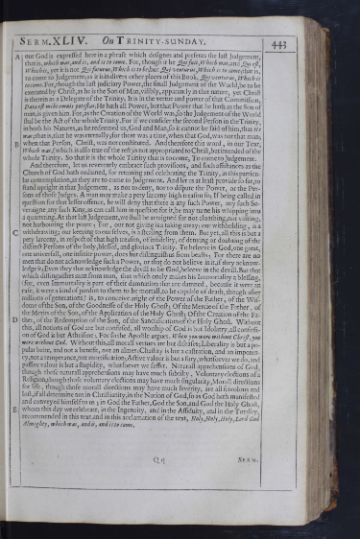 Serm. XLIV.
On Trinity-sunday.
443
our God is expressed here in a phrase which designes and presents the last Judgement,
Serm. XLIV.
On Trinity-sunday.
443
our God is expressed here in a phrase which designes and presents the last Judgement,
that is, which was, and is, and is to come. For, though it be Qui fuit, Which was, and Qui est,
Which is, yet it is not Qui futurus, Which is to be; but Qui venturus, Which is to come; that is,
to come to Judgement; as it is in divers other places of this Book, Qui venturus, Which is
to come. For, though the last judiciary Power, the finall Judgement of the World, be to be
executed by Christ, as he is the Son of Man, visibly, apparantly in that nature, yet Christ
is therein as a Delegate of the Trinity; It is in the vertue and power of that Commission,
Data est mihi omnis potestas; He hath all Power, but that Power that he hath as the Son of
man, is given him. For, as the Creation of the World was, so the Judgement of the World
shal be the Act of the whole Trinity. For if we consider the second Person in the Trinity,
in both his Natures, as he redeemed us, God and Man, so it cannot be said of him, that He
was; that is, that he was eternally; for there was a time, when that God, was not that man;
when that Person, Christ, was not constituted. And therefore this word, in our Text,
which was, (which is also true of the rest) is not appropriated to Christ, but intended of the
whole Trinity. So that it is the whole Trinity that is to come, To come to Judgement.
And therefore, let us reverently embrace such provisions, and such assistances as the
Church of God hath ordained, for retaining and celebrating the Trinity, in this particu-
lar contemplation, as they are to come to Judgement. And let us at least provide so far, to
stand upright in that Judgement, as not to deny, nor to dispute the Power, or the Per-
sons of those Judges. A man may make a pety larceny high treason so; If being called in
question for that lesser offence, he will deny that there is any such Power, any such So-
veraigne, any such King, as can call him in question for it, he may turne his whipping into
a quartering. At that last Judgement, we shall be arraigned for not cloathing, not visiting,
not harbouring the poore; For, our not giving is a taking away; our withholding, is a
withdrawing; our keeping to our selves, is a stealing from them. But yet, all this is but a
pety larceny, in respect of that high treason, of infidelity, of denying or doubting of the
distinct Persons of the holy, blessed, and glorious Trinity. To beleeve in God, one great,
one universall, one infinite power, does but distinguish us from beasts; For there are no
men that do not acknowledge such a Power, or that do not believe in it, if they acknow-
ledge it; Even they that acknowledge the devill to be God, beleeve in the devill. But that
which distinguishes man from man, that which onely makes his Immortality a blessing,
(for, even Immortality is part of their damnation that are damned, because it were an
ease, it were a kind of pardon to them to be mortall, to be capable of death, though after
millions of generations) is, to conceive aright of the Power of the Father, of the Wis-
dome of the Son, of the Goodnesse of the Holy Ghost; Of the Mercie of the Father, of
the Merits of the Son, of the Application of the Holy Ghost; Of the Creation of the Fa-
ther, of the Redemption of the Son, of the Sanctification of the Holy Ghost. Without
this, all notions of God are but confused, all worship of God is but Idolatry, all confessi-
on of God is but Atheisme; For so the Apostle argues, When you were without Christ, you
were without God. Without this, all morall vertues are but diseases; Liberality is but a po-
pular baite, and not a benefit, not an almes; Chastity is but a castration, and an impoten-
cy, not a temperance, not mortification; Active valour is but a fury, whatsoever we do, and
passive valour is but a stupidity, whatsoever we suffer. Naturall apprehensions of God,
though those naturall apprehensions may have much subtilty, Voluntary elections of a
Religion, though those voluntary elections may have much singularity, Morall directions
for life, though those morall directions may have much severity, are all frivolous and
lost, if all determine not in Christianity, in the Notion of God, so as God hath manifested
and conveyed himself to us; in God the Father, God the Son, and God the Holy Ghost,
whom this day we celebrate, in the Ingenuity, and in the Assiduity, and in the Totality,
recommended in this text, and in this acclamation of the text, Holy, Holy, Holy, Lord God
Almighty, which was, and is, and is to come. Qq Serm.
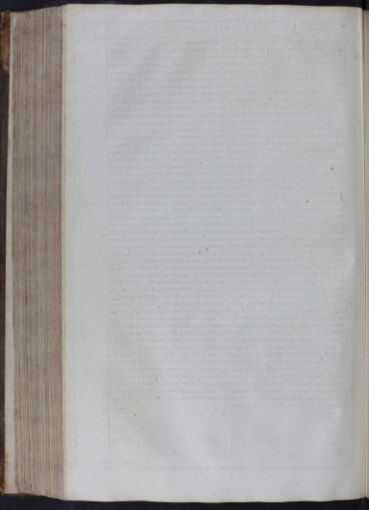
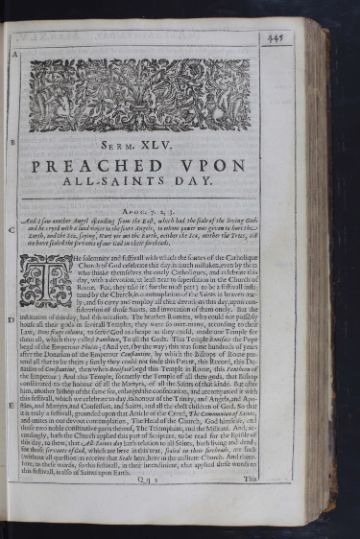 445
445
Serm. XLV.
PREACHED VPON
ALL-SAINTS DAY.
Apoc. 7. 2, 3.
And I saw another Angel ascending from the East, which had the seale of the living God,
and he cryed with a loud voyce to the foure Angels, to whom power was given to hurt the
Earth, and the Sea, saying, Hurt yee not the Earth, neither the Sea, neither the Trees, till
we have sealed the servants of our God in their foreheads.
THeThe solemnity and festivall with which the sonnes of the Catholique
Church of God celebrate this day, is much mistaken, even by them
who thinke themselves the onely Catholiques, and celebrate this
day, with a devotion, at least near to superstition in the Church of
Rome. For, they take it (for the most part) to be a festivall insti-
tuted by the Church, in contemplation of the Saints in heaven one-
ly; and so carry and employ all their devotions this day, upon con-
sideration of those Saints, and invocation of them onely. But the
institution of this day, had this occasion. The heathen Romans, who could not possibly
house all their gods in severall Temples, they were so over-many, according to their
Law, Deos frugi colunto, to serve God as cheape as they could, made one Temple for
them all, which they called Pantheon, To all the Gods. This Temple Boniface the Pope
begd of the Emperour Phocas; (And yet, (by the way) this was some hundreds of years
after the Donation of the Emperour Constantine, by which the Bishops of Rome pre-
tend all that to be theirs; surely they could not finde this Patent, this Record, this Do-
nation of Constantine, then when Boniface begd this Temple in Rome, this Pantheon of
the Emperour) And this Temple, formerly the Temple of all their gods, that Bishop
consecrated to the honour of all the Martyrs, of all the Saints of that kinde. But after
him, another Bishop of the same sea, enlarged the consecration, and accompanied it with
this festivall, which we celebrate to day, in honour of the Trinity, and Angels, and Apo-
stles, and Martyrs, and Confessors, and Saints, and all the elect children of God. So that
it is truly a festivall, grounded upon that Article of the Creed, The Communion of Saints,
and unites in our devout contemplation, The Head of the Church, God himselfe, and
those two noble constitutive parts thereof, The Triumphant, and the Militant. And, ac-
cordingly, hath the Church applied this part of Scripture, to be read for the Epistle of
this day, to shew, that All-Saints day hath relation to all Saints, both living and dead;
for those servants of God, which are here in this text, sealed in their foreheads, are such
(without all question) as receive that Seale here, here in the militant Church. And there-
fore, as these words, so this festivall, in their intendiment, that applied these words to
this festivall, is also of Saints upon Earth. Qq2 This
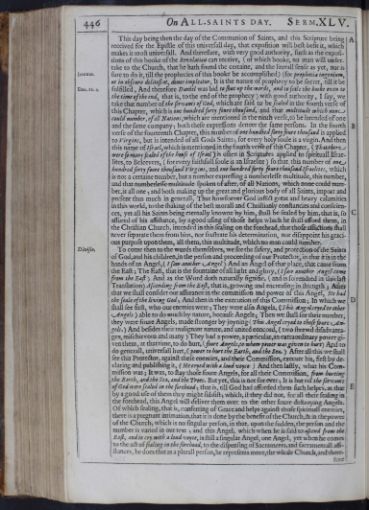 446
On All-saints day.
Serm. XLV.
This day being then the day of the Communion of Saints, and this Scripture being
446
On All-saints day.
Serm. XLV.
This day being then the day of the Communion of Saints, and this Scripture being
received for the Epistle of this universall day, that exposition will best befit it, which
makes it most universall. And therefore, with very good authority, such as the exposi-
tions of this booke of the Revelation can receive, (of which booke, no man will under-
take to the Church, that he hath found the certaine, and the literall sense as yet, nor is
sure to do it, Irenæus. till the prophecies of this booke be accomplished) (for prophetiæ ingenium,
ut in obscuro delitescat, donec impleatur, It is the nature of prophecy to be secret, till it be
fulfilled, Dan. 12.4. And therefore Daniel was bid to shut up the words, and to seale the booke even to
the time of the end, that is, to the end of the prophecy) with good authority, I say, we
take that number of the servants of God, which are said to be sealed in the fourth verse of
this Chapter, which is one hundred forty foure thousand, and that multitude which none
could number, of all Nations, which are mentioned in the ninth verse, to be intended of one
and the same company; both these expressions denote the same persons. In the fourth
verse of the fourteenth Chapter, this number of one hundred forty foure thousand is applied
to Virgins, but is intended of all Gods Saints; for every holy soule is a virgin. And then
this name of Israel, which is mentioned in the fourth verse of this Chapter, (That there
were so many sealed of the house of Israel) is often in Scriptures applied to spirituall Israe-
lites, to Beleevers, (for every faithfull soule is an Israelite) so that this number of one
hundred forty foure thousand Virgins, and one hundred forty foure thousand Israelites, which
is not a certaine number, but a number expressing a numberlesse multitude, this number,
and that numberlesse multitude spoken of after, of all Nations, which none could num-
ber, is all one; and both making up the great and glorious body of all Saints, import and
present thus much in generall, That howsoever God inflict great and heavy calamities
in this world, to the shaking of the best morall and Christianly constancies and conscien-
ces, yet all his Saints being eternally knowne by him, shall be sealed by him, that is, so
assured of his assistance, by a good using of those helps which he shall afford them, in
the Christian Church, intended in this sealing on the forehead, that those afflictions shall
never separate them from him, nor frustrate his determination, nor disappoint his graci-
ous purpose upon them, all them, this multitude, which no man could number.
To come then to the words themselves, Divisio. we see the safety, and protection of the Saints
of God, and his children, in the person and proceeding of our Protector, in that it is in the
hands of an Angel, (I saw another Angel) And an Angel of that place, that came from
the East; The East, that is the fountaine of all light and glory, (I saw another Angel come
from the East) And as the Word doth naturally signifie, (and is so rendred in this last
Translation) Ascending from the East, that is, growing and encreasing in strength; After
that we shall consider our assurance in the commission and power of this Angel, He had
the seaele of the living God; And then in the execution of this Commission; In which we
shall see first, who our enemies were; They were also Angels, (This Angel cryed to other
Angels) able to do much by nature, because Angels; Then we shall see their number,
they were foure Angels, made stronger by joyning (This Angel cryed to those foure An-
gels.) And besides their malignant nature, and united concord, (two shrewd disadvanta-
ges, mischievous and many) They had a power, a particular, an extraordinary power gi-
ven them, at that time, to do hurt, (foure Angels, to whom power was given to hurt) And to
do generall, universall hurt, (power to hurt the Earth, and the Sea.) After all this we shall
see this Protector, against these enemies, and their Commission, execute his, first by de-
claring and publishing it, (He cryed with a loud voyce) And then lastly, what his Com-
mission was; It was, to stay those foure Angels, for all their Commission, from hurting
the Earth, and the Sea, and the Trees. But yet, this is not for ever; It is but till the servants
of God were sealed in the forehead; that is, till God had afforded them such helpes, as that
by a good use of them they might subsist; which, if they did not, for all their sealing in
the forehead, this Angel will deliver them over to the other foure destroying Angels.
Of which sealing, that is, conferring of Grace and helps against those spirituall enemies,
there is a pregnant intimation, that it is done by the benefit of the Church, & in the power
of the Church, which is no singular person, in that, upon the sudden, the person and the
number is varied in our text; and this Angel, which when he is said to ascend from the
East, and to cry with a loud voyce, is still a singular Angel, one Angel, yet when he comes
to the act of sealing in the forehead, to the dispensing of Sacraments, and sacramentall assi-
stances, he does that as a plurall person, he represents more, the whole Church, and there fore
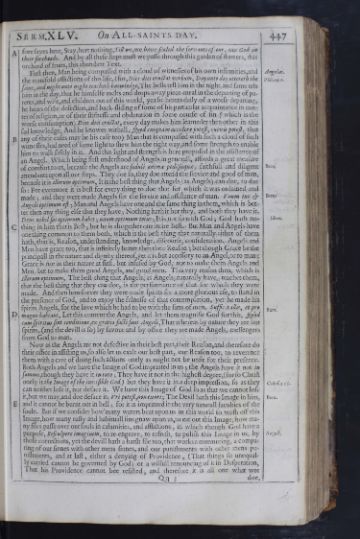 Serm. XLV.
On All-saints day.
447
fore sayes here, Stay, hurt nothing, Till we, we have sealed the servants of our, our God in
Serm. XLV.
On All-saints day.
447
fore sayes here, Stay, hurt nothing, Till we, we have sealed the servants of our, our God in
their foreheads. And by all these steps must we passe through this garden of flowers, this
orchard of fruits, this abundant Text.
First then, Man being compassed with a cloud of witnesses of his own infirmities, Angelus. and
the manifold afflictions of this life, (for, Dies diei eructat verbum,Psal. 19.2. Day unto day uttereth the
same, and night unto night teacheth knowledge, The bells tell him in the night, and fame tels
him in the day, that he himselfe melts and drops away piece-meal in the departing of pa-
rents, and wife, and children out of this world, yea he heares daily of a worse departing,
he hears of the defection, and back-sliding of some of his particular acquaintance in mat-
ter of religion, or of their stifnesse and obduration in some course of sin (which is the
worse consumption) Dies diei eructat, every day makes him learneder then other in this
sad knowledge, And he knowes withall, Quod cuiquam accidere potest, cuivis potest, that
any of their cases may be his case too) Man that is compassed with such a cloud of such
witnesses, had need of some light to shew him the right way, and some strength to enable
him to walk safely in it. And this light and strength is here proposed in the assistance of
an Angel. Which being first understood of Angels in generall, affords a great measure
of comfort to us, because the Angels are seduli animæ pedissequæ, Bern. faithfull and diligent
attendants upon all our steps. They doe so, they doe attend the service and good of man,
because it is illorum optimum, It is the best thing that Angels (as Angels) can doe, to doe
so: For evermore it is best for every thing to doe that for which it was ordained and
made; and they were made Angels for the service and assistance of man.Bern. Vnum tui &
Angeli optimum est; Man and Angels have one and the same thing in them, which is bet-
ter then any thing else that they have; Nothing hath it but they, and both they have it.
Deus nihil sui optimum habet; unum optimum totus; It is not so with God;Idem God hath no-
thing in him that is Best; but he is altogether one intire Best. But Man and Angels have
one thing common to them both, which is the best thing that naturally either of them
hath, that is, Reason, understanding, knowledge, discourse, consideration. Angels and
Men have grace too, that is infinitely better then their Reason; but though Grace be the
principall in the nature and dignity thereof, yet it is but accessory to an Angel, or to man;
Grace is not in their nature at first, but infused by God, not to make them Angels and
Men, but to make them good Angels, and good men. This very reason then, which is
Illorum optimum, The best thing that Angels, as Angels, naturally have, teaches them,
that the best thing that they can doe, is the performance of that for which they were
made. And then howsoever they were made spirits for a more glorious use, to stand in
the presence of God, and to enjoy the fulnesse of that contemplation, yet he made his
spirits Angels, for the love which he had to be with the sons of men. Sufficit illis,Bern. et pro
magno habeant, Let this content the Angels, and let them magnifie God for this, Quòd
cum spiritus sint conditione, ex gratia facti sunt Angeli, That whereas by nature they are but
spirits, (and the devill is so) by favour and by office they are made Angels, messengers
from God to man.
Now as the Angels are not defective in their best part, their Reason, and therefore do
their office in assisting us, so also let us exalt our best part, our Reason too, to reverence
them with a care of doing such actions onely as might not be unfit for their presence.
Both Angels and we have the Image of God imprinted in us; the Angels have it not in
summo, though they have it in tuto; They have it not in the highest degree, (for so Christ
onely is the Image of the invisible God) but they have it in a deep impression, Colos. 1.15. so as they
can neither lose it, nor deface it. We have this Image of God so as that we cannot lose
it, but we may, and doe deface it; Vri potest, non exuri; The Devil hath this Image in him,
Bern. and it cannot be burnt out in hell; for it is imprinted in the very naturall faculties of the
soule. But if we consider how many waters beat upon us in this world to wash off this
Image, how many rusty and habituall sins gnaw upon us, to eat out this Image, how ma-
ny files passe over our souls in calamities, and afflictions, in which though God have a
purpose, Resculpere imaginem, to re-engrave, to refresh, to polish this Image in us, August. by
those corrections, yet the devill hath a harsh file too, that works a murmuring, a compa-
ring of our sinnes with other mens sinnes, and our punishments with other mens pu-
nishments, and at last, either a denying of Providence, (That things so unequal-
ly carried cannot be governed by God) or a wilfull renouncing of it in Desperation,
That his Providence cannot bee resisted, and therefore it is all one what wee Qq3 doe,
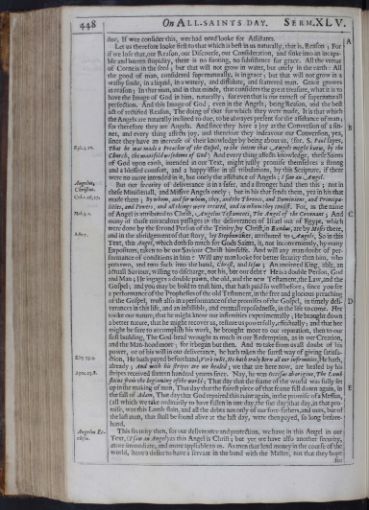 448
On All saints day.
Serm.XLV.
doe, If wee consider this, wee had need looke for Assistants.
448
On All saints day.
Serm.XLV.
doe, If wee consider this, wee had need looke for Assistants.
Let us therefore looke first to that which is best in us naturally, that is, Reason; For
if we lose that, our Reason, our Discourse, our Consideration, and sinke into an incapa-
ble and barren stupidity, there is no footing, no subsistence for grace. All the vertue
of Corne is in the seed; but that will not grow in water, but onely in the earth: All
the good of man, considered supernaturally, is in grace; but that will not grow in a
washy soule, in a liquid, in a watery, and dissolute, and scattered man. Grace growes
in reason; In that man, and in that minde, that considers the great treasure, what it is to
have the Image of God in him, naturally; for even that is our earnest of supernaturall
perfection. And this Image of God, even in the Angels, being Reason, and the best
act of rectified Reason, The doing of that for which they were made, It is that which
the Angels are naturally inclined to doe, to be alwayes present for the assistance of man;
for therefore they are Angels. And since they have a joy at the Conversion of a sin-
ner, and every thing affects joy, and therefore they indeavour our Conversion, yea,
since they have an increase of their knowledge by being about us, (for, S. Paul sayes,
That he was made a Preacher of the Gospel,Eph. 3.10. to the intent that Angels might know, by the
Church, the manifold wisedome of God) And every thing affects knowledge, these Saints
of God upon earth, intended in our Text, might justly promise themselves a strong
and a blessed comfort, and a happy issue in all tribulations, by this Scripture, if there
were no more intended in it, but onely the assistance of Angels; I saw an Angel.
But our security of deliverance is in a safer, Angelus,
Christus. and a stronger hand then this; not in
these Ministeriall, and Missive Angels onely; but in his that sends them, yea in his that
made them;Col. 1.16,17. By whom, and for whom, they, and the Thrones, and Dominions, and Principa-
lities, and Powers, and all things were created, and in whom they consist. For, as the name
of Angel is attributed to Christ, Mal. 3.1. Angelus Testamenti, The Angel of the Covenant; And
many of those miraculous passages in the deliverances of Israel out of Egypt, which
were done by the second Person of the Trinity, by Christ, in Exodus, are by Moses there,
and in the abridgement of that story, Acts 7. by Stephen after, attributed to Angels, So in this
Text, this Angel, which doth so much for Gods Saints, is, not inconveniently, by many
Expositors, taken to be our Saviour Christ himselfe. And will any man doubt of per-
formance of conditions in him? Will any man looke for better security then him, who
puts two, and two such into the band, Christ, and Iesus; An anointed King, able, an
actuall Saviour, willing to discharge, not his, but our debt? He is a double Person, God
and Man; He ingages a double pawn, the old, and the new Testament, the Law, and the
Gospel; and you may be bold to trust him, that hath paid so well before; since you see
a performance of the Prophesies of the old Testament, in the free and glorious preaching
of the Gospel, trust also in a performance of the promises of the Gospel, in timely deli-
verances in this life, and an infallible, and eternall reposednesse, in the life to come. Hee
tooke our nature, that he might know our infirmities experimentally; He brought down
a better nature, that he might recover us, restore us powerfully, effectually; and that hee
might be sure to accomplish his work, he brought more to our reparation, then to our
first building, The God-head wrought as much in our Redemption, as in our Creation,
and the Man-hood more; for it began but then. And to take from us all doubt of his
power, or of his will in our deliverance, he hath taken the surest way of giving satisfa-
ction, Esay 53.4. He hath payed beforehand; Verè tulit, He hath truly born all our infirmities, He hath,
already; And with his stripes are we healed; we that are here now, are healed by his
stripes received sixteen hundred yeares since.Apoc. 13.8. Nay, he was Occisus ab origine, The Lamb
slaine from the beginning of the world; That day that the frame of the world was fully set
up in the making of man, That day that the fairest piece of that frame fell down again, in
the fall of Adam, That day that God repaired this ruine again, in the promise of a Messias,
(all which we take ordinarily to have fallen in one day, the sixt day) that day, in that pro-
mise, was this Lamb slain, and all the debts not only of our fore-fathers, and ours, but of
the last man, that shall be found alive at the last day, were then payed, so long before-
hand.
This security then, Angelus Ec-
clesiæ. for our deliverance and protection, we have in this Angel in our
Text, (I saw an Angel) as this Angel is Christ; but yet we have also another security,
more immediate, and more appliable to us. As men that lend money in the course of the
world, have a desire to have a servant in the band with the Master, not that they hope for
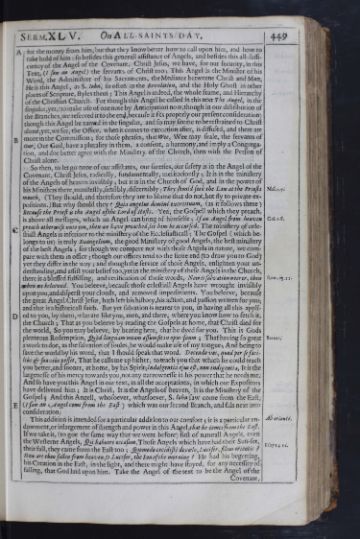 Serm.XLV.
OnAll saints day.
449
for the money from him, but that they know better how to call upon him, and how to
Serm.XLV.
OnAll saints day.
449
for the money from him, but that they know better how to call upon him, and how to
take hold of him: so besides this generall assistance of Angels, and besides this all-suffi-
ciency of the Angel of the Covenant, Christ Jesus, we have, for our security, in this
Text, (I saw an Angel) the servants of Christ too; This Angel is the Minister of his
Word, the Administrer of his Sacraments, the Mediator betweene Christ and Man,
He is this Angel, as S. Iohn, so often in the Revelation, and the Holy Ghost in other
places of Scripture, styles them; This Angel is indeed, the whole frame, and Hierarchy
of the Christian Church. For though this Angel be called in this text The Angel, in the
singular, yet, (to make use of one note by Anticipation now, though in our distribution of
the Branches, we reserved it to the end, because it fits properly our present consideration)
though this Angel be named in the singular, and so may seeme to be restrained to Christ
alone, yet, we see, the Office, when it comes to execution after, is diffused, and there are
more in the Commission; for those phrases, that Wee, Wee may seale, the servants of
Our, Our God, have a plurality in them, a consent, a harmony, and imply a Congrega-
tion, and doe better agree with the Ministery of the Church, then with the Person of
Christ alone.
So then, to let go none of our assistants, our sureties, our safety is in the Angel of the
Covenant, Christ Jesus, radically, fundamentally, meritoriously; It is in the ministery
of the Angels of heaven invisibly; but it is in the Church of God, and in the power of
his Ministers there, manifestly, sensibly, discernibly;Mal. 2.7. They should seek the Law at the Priests
mouth, (They should, and therefore they are to blame that do not, but fly to private ex-
positions.) But why should they? Quia angelus domini exercituum, (as it follows there)
Because the Priest is the Angel of the Lord of Hosts. Yea, the Gospell which they preach,
is above all messages, which an Angel can bring of himselfe;Gal. 1.8. If an Angel from heaven
preach otherwise unto you, then we have preached, let him be accursed. The ministery of cele-
stiall Angels is inferiour to the ministery of the Ecclesiasticall; The Gospel (which be-
longs to us) is truly Euangelium, the good Ministery of good Angels, the best ministery
of the best Angels; for though we compare not with those Angels in nature, we com-
pare with them in office; though our offices tend to the same end (to draw you to God)
yet they differ in the way; and though the service of those Angels, enlighten your un-
derstanding, and assist your belief too, yet in the ministery of these Angels in the Church,
there is a blessed fulfilling, and verification of those words, Now is salvation nearer,Rom. 13.11. then
when we beleeved. You beleeve, because those celestiall Angels have wrought invisibly
upon you, and disperst your clouds, and removed impediments. You beleeve, because
the great Angel Christ Jesus, hath left his history, his action, and passion written for you;
and that is a historicall faith. But yet salvation is nearer to you, in having all this appli-
ed to you, by them, who are like you, men, and there, where you know how to fetch it,
the Church; That as you beleeve by reading the Gospels at home, that Christ died for
the world, So you may beleeve, by hearing here, that he dyed for you. This is Gods
plenteous Redemption, Quòd linguam meam assumsit in opus suum;Bernar. That having so great
a work to doe, as the salvation of soules, he would make use of my tongue; And being to
save the world by his word, that I should speak that word. Docendo vos, quod per se faci-
liùs & suaviùs posset, That he calls me up hither, to teach you that which he could teach
you better, and sooner, at home, by his Spirit; Indulgentia ejus est, non indigentia, It is the
largenesse of his mercy towards you, not any narrownesse in his power that he needs me.
And so have you this Angel in our text, in all the acceptations, in which our Expositors
have delivered him; It is Christ, It is the Angels of heaven, It is the Ministery of the
Gospel; And this Angell, whosoever, whatsoever, S. Iohn saw come from the East,
(I saw an Angel come from the East) which was our second Branch, and fals next into
consideration.
This addition is intended for a particular addition to our comfort;Ab oriente. it is a particular en-
dowment, or inlargement of strength and power in this Angel, that he comes from the East.
If we take it, (to goe the same way that we went before) first of naturall Angels, even
the Westerne Angels, Qui habuere occasum, Those Angels which have had their Sun-set,
their fall, they came from the East too; Quomodo cecidisti decœlo, Lucifer, filius orientis?
Esay 14 12. How art thou fallen from heaven, O Lucifer, the Son of the morning? He had his begetting,
his Creation in the East, in the light, and there might have stayed, for any necessity of
falling, that God laid upon him. Take the Angel of the text to be the Angel of the Covenant,
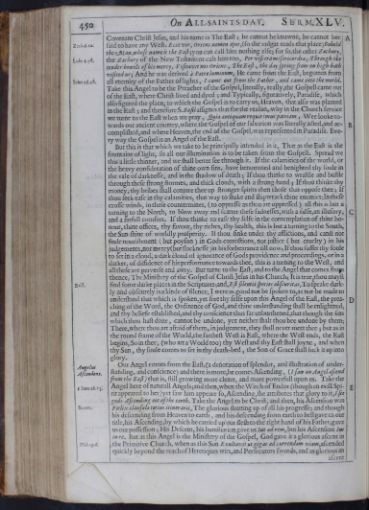 450
On All saints day.
Serm.XLV.
Covenant Christ Jesus, and his name is The East; he cannot be knowne, he cannot bee
450
On All saints day.
Serm.XLV.
Covenant Christ Jesus, and his name is The East; he cannot be knowne, he cannot bee
said to have any West.Zech. 6.12. Ecce vir, Oriens nomen ejus, (so the vulgat reads that place) Behold
the Man, whose name is the East; you can call him nothing else; for so, the other Zachary,
the Zachary of the New Testament cals him too, Luke 1.78. Per viscera misericordiæ, Through the
tender bowels of his mercy, Visitavit nos Oriens, The East, the day spring from on high hath
visited us; And he was derived à Patre luminum, He came from the East, begotten from
all eternity of the Father of lights, Iohn 16.28. I came out from the Father, and came into the world.
Take this Angel to be the Preacher of the Gospel, literally, really, the Gospell came out
of the East, where Christ lived and dyed; and Typically, figuratively, Paradise, which
also figured the place, to which the Gospel is to carry us, Heaven, that also was planted
in the East; and therefore S. Basil assignes that for the reason, why in the Church service
we turne to the East when we pray, Quia antiquam requirimus patriam, Wee looke to-
wards our ancient country, where the Gospel of our salvation was literally acted, and ac-
complished, and where Heaven, the end of the Gospel, was represented in Paradise. Eve-
ry way the Gospel is an Angel of the East.
But this is that which we take to be principally intended in it, That as the East is the
fountaine of light, so all our illumination is to be taken from the Gospell. Spread we
this a little thinner, and we shall better see through it. If the calamities of the world, or
the heavy consideration of thine own sins, have benummed and benighted thy soule in
the vale of darknesse, and in the shadow of death; If thou thinke to wrastle and bustle
through these strong stormes, and thick clouds, with a strong hand; If thou thinke thy
money, thy bribes shall conjure thee up stronger spirits then those that oppose thee; If
thou seek ease in thy calamities, that way to shake and shipwrack thine enemies; In these
crosse winds, in these countermines, (to oppresse as thou art oppressed) all this is but a
turning to the North, to blow away and scatter these sadnesses, with a false, an illusory,
and a sinfull comfort. If thou thinke to ease thy selfe in the contemplation of thine ho-
nour, thine offices; thy favour, thy riches, thy health, this is but a turning to the South,
the Sun-shine of worldly prosperity. If thou sinke under thy afflictions, and canst not
finde nourishment (but poyson) in Gods corrections, nor justice (but cruelty) in his
judgements, nor mercy (but slacknesse) in his forbearance till now; If thou suffer thy soule
to set in a cloud, a dark cloud of ignorance of Gods providence and proceedings, or in a
darker, of diffidence of his performance towards thee, this is a turning to the West, and
all these are perverse and awry. But turne to the East, and to the Angel that comes from
thence, The Ministery of the Gospel of Christ Jesus in his Church; It is true, thou mayst
find some darke places in the Scriptures;Basil. and, Est silentii species obscuritas, To speake dark-
ly and obscurely is a kinde of silence, I were as good not be spoken to, as not be made to
understand that which is spoken, yet fixe thy selfe upon this Angel of the East, the prea-
ching of the Word, the Ordinance of God, and thine understanding shall be enlightned,
and thy beliefe established, and thy conscience thus far unburthened, that though the sins
which thou hast done, cannot be undone, yet neither shalt thou bee undone by them;
There, where thou art afraid of them, in judgement, they shall never meet thee; but as in
the round frame of the World, the farthest West is East, where the West ends, the East
begins, So in thee, (who art a World too) thy West and thy East shall joyne, and when
thy Sun, thy soule comes to set in thy death-bed, the Son of Grace shall suck it up into
glory.
Our Angel comes from the East, Angelus
Ascendens. (a denotation of splendor, and illustration of under-
standing, and conscience) and there is more, he comes Ascending, (I saw an Angel ascend
from the East) that is, still growing more cleare, and more powerfull upon us. Take the
Angel here of naturall Angels;1 Sam. 28.13. and then, when the Witch of Endor (though an evill Spi-
rit appeared to her) yet saw him appeare so, Ascending, she attributes that glory to it, I see
gods Ascending out of the earth. Take the Angel to be Christ, and then, his Ascension was
Fœlix clausula totius itinerarii,Bernar. The glorious shutting up of all his progresse; and though
his descending from Heaven to earth, and his descending from earth to hell gave us our
title, his Ascending, by which he carried up our flesh to the right hand of his Father, gave
us our possession; His Descent, his humiliation gave us Ius ad rem, but his Ascension Ius
in re. But as this Angel is the Ministery of the Gospel, God gave it a glorious ascent in
the Primitive Church, Psal. 19.6. when as this Sun Exultavit ut gigas ad currendam viam, ascended
quickly beyond the reach of Heretiques wits, and Persecutors swords, and as glorious an ascent
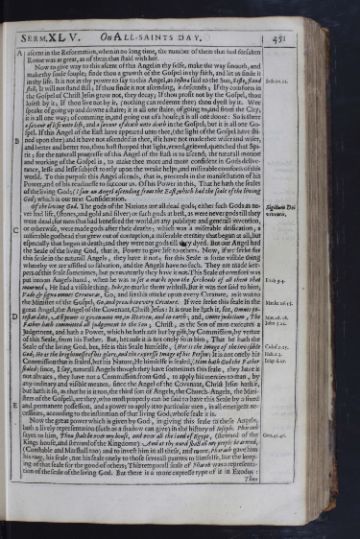 Serm. XLV.
On All-saints day.
451
ascent in the Reformation, when in no long time, the number of them that had forsaken
Serm. XLV.
On All-saints day.
451
ascent in the Reformation, when in no long time, the number of them that had forsaken
Rome was as great, as of them that staid with her.
Now to give way to this ascent of this Angel in thy selfe, make the way smooth, and
make thy soule souple; finde thou a growth of the Gospel in thy faith, and let us finde it
in thy life. It is not in thy power to say to this Angel, as Ioshua said to the Sun, Siste,Iosh. 10.12. stand
still; It will not stand still; If thou finde it not ascending, it descends; If thy comforts in
the Gospel of Christ Jesus grow not, they decay; If thou profit not by the Gospel, thou
losest by it; If thou live not by it, (nothing can redeeme thee) thou dyest by it. Wee
speake of going up and downe a staire; it is all one staire; of going to, and from the City;
it is all one way; of comming in, and going out of a house; it is all one doore: So is there
a savour of life unto life, and a savour of death unto death in the Gospel; but it is all one Go-
spel. If this Angel of the East have appeared unto thee, (the light of the Gospel have shi-
ned upon thee) and it have not ascended in thee, if it have not made thee wiser and wiser,
and better and better too, thou hast stopped that light, vexed, grieved, quenched that Spi-
rit; for the naturall progresse of this Angel of the East is to ascend; the naturall motion
and working of the Gospel is, to make thee more and more confident in Gods delive-
rance, lesse and lesse subject to rely upon the weake helps, and miserable comforts of this
world. To this purpose this Angel ascends, that is, proceeds in the manifestation of his
Power, and of his readinesse to succour us. Of his Power in this, That he hath the seales
of the living God; (I saw an Angel ascending from the East, which had the seale of the living
God) which is our next Consideration.
Of the living God. The gods of the Nations are all dead gods;Sigillum Dei
viventis. either such Gods as ne-
ver had life, (stones, and gold and silver) or such gods at best, as were never gods till they
were dead; for men that had benefited the world, in any publique and generall invention,
or otherwise, were made gods after their deaths; which was a miserable deification, a
miserable godhead that grew out of corruption, a miserable eternity that begun at all, but
especially that begun in death; and they were not gods till they dyed. But our Angel had
the Seale of the living God, that is, Power to give life to others. Now, if we seeke for
this seale in the naturall Angels, they have it not; for this Seale is some visible thing
whereby we are assisted to salvation, and the Angels have no such. They are made kee-
pers of this seale sometimes, but permanently they have it not. This Seale of comfort was
put into an Angels hand, Ezek. 9.4. when he was to set a marke upon the foreheads of all them that
mourned; He had a visible thing, Inke, to marke them withall. But it was not said to him,
Vade & signa omnes Creaturas, Go, and set this marke upon every Creature, as it was to
the Minister of the Gospel, Go, and preach to every Creature.Marke 16.15. If wee seeke this seale in the
great Angel, the Angel of the Covenant, Christ Jesus: It is true he hath it, for, Omnis po-
testas data, All power is given unto me, in Heaven, and in earth; and, Omne judicium,Mat. 28.18.
Iohn 5.22. The
Father hath committed all judgement to the Son; Christ, as the Son of man executes a
Judgement, and hath a Power, which he hath not but by gift, by Commission, by vertue
of this Seale, from his Father. But, because it is not onely so in him, That he hath the
Seale of the living God, but, He is this Seale himselfe, Colos. 1.15.
Heb. 1.3.
Iohn 6.27. (Hee is the Image of the invisible
God; He is the brightnesse of his glory, and the expresse Image of his Person) It is not onely his
Commission that is sealed, but his Nature, He himselfe is sealed, (Him hath God the Father
sealed) since, I say, naturall Angels though they have sometimes this seale, they have it
not alwaies, they have not a Commission from God, to apply his mercies to man, by
any ordinary and visible meanes, since the Angel of the Covenant, Christ Jesus hath it,
but hath it so, as that he is it too, the third sort of Angels, the Church-Angels, the Mini-
sters of the Gospell, are they, who most properly can be said to have this Seale by a fixed
and permanent possession, and a power to apply it to particular men, in all emergent ne-
cessities, according to the institution of that living God, whose seale it is.
Now the great power which is given by God, in giving this seale to these Angels,
hath a lively representation (such as a shadow can give) in the history of Ioseph. Pharaoh
sayes to him, Thou shalt be over my house, and over all the land of Egypt,Gen. 41.40. (steward of the
Kings house, and steward of the Kingdome) And at thy word shall all my people be armed,
(Constable and Marshall too) and to invest him in all these, and more, Pharaoh gave him
his ring, his seale; not his seale onely to those severall patents to himselfe, but the keep-
ing of that seale for the good of others; This temporall seale of Pharoh was a representa-
tion of the seale of the living God. But there is a more expresse type of it in Exodus: Thou
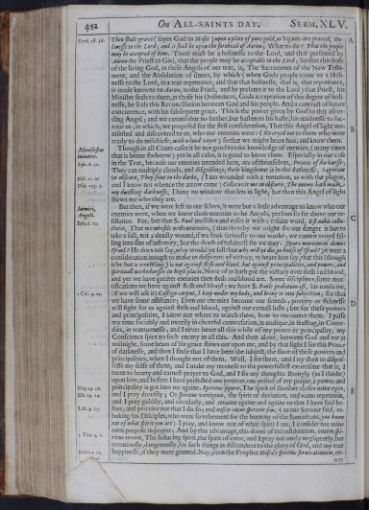 452
On All-saints day.
Serm. XLV.
Thou shalt grave (sayes God to Moses) upon a plate of pure gold,Exod. 28.36. as Signets are graved, Ho-
452
On All-saints day.
Serm. XLV.
Thou shalt grave (sayes God to Moses) upon a plate of pure gold,Exod. 28.36. as Signets are graved, Ho-linesse to the Lord; and it shall be upon the forehead of Aaron; What to do? That the people
may be accepted of him. There must be a holinesse to the Lord, and that presented by
Aaron the Priest to God, that the people may be acceptable to the Lord; So that this seale
of the living God, in these Angels of our text, is, The Sacraments of the New Testa-
ment, and the Absolution of sinnes, by which (when Gods people come to a Holi-
nesse to the Lord, in a true repentance, and that that holinesse, that is, that repentance,
is made knowne to Aaron, to the Priest, and he presents it to the Lord) that Priest, his
Minister seals to them, in those his Ordinances, Gods acceptation of this degree of holi-
nesse, he seals this Reconciliation between God and his people. And a contract of future
concurrence, with his subsequent grace. This is the power given by God to this ascen-
ding Angel; and we extend that no farther, but hasten to his haste, his readinesse to suc-
cour us; in which, we proposed for the first consideration, That this Angel of light ma-
nifested and discovered to us, who our enemies were: (He cryed out to them who were
ready to do mischiefe, with a loud voyce) so that we might heare him, and know them.
Though in all Court-cases it be not good to take knowledge of enemies, Manifestat
inimicos. (many times
that is better forborne) yet in all cases, it is good to know them. Especially in our case
in the Text, Eph. 6.12. because our enemies intended here, are of themselves, Princes of darknesse;
They can multiply clouds, and disguisings, their kingdome is in the darknesse, Sagittant
in obscuro,Psal. 11.2.
Psal. 143.3. They shoot in the darke, (I am wounded with a tentation, as with the plague,
and I know not whence the arrow came) Collocavit me in obscuris, The enemy hath made
my dwelling darknesse, I have no window that lets in light, but then this Angel of light
shews me who they are.
But then, Inimici,
Angeli. if we were left to our selves, it were but a little advantage to know who our
enemies were, when we knew those enemies to be Angels, persons so far above our re-
sistance.Eph. 6.12. For, but that S. Paul mollifies and eases it with a milder word, Est nobis collu-
ctatio, That we wrestle with enemies, (that thereby we might see our danger is but to
take a fall, not a deadly wound, if we look seriously to our worke; we cannot avoyd fal-
ling into sins of infirmity, but the death of habituall sin we may: Quare moriemini domus
Israel? He does not say, why would ye fall? but why will ye die, ye house of Israel?) it were a
consideration inough to make us desperate of victory, to heare him say, that this (though
it be but a wrestling) is not against flesh and blood, but against principalities, and powers, and
spirituall wickednesses in high places. None of us hath got the victory over flesh and blood,
and yet we have greater enemies then flesh and blood are. Some disciplines, some mor-
tifications we have against flesh and blood; we have S. Pauls probatum est, his medicine,
(if we will use it) Castigo corpus,1 Cor. 9.27. I keep under my body, and bring it into subjection; for that
we have some assistance; Even our enemies become our friends; poverty or sicknesse
will fight for us against flesh and blood, against our carnall lusts; but for these powers
and principalities, I know not where to watch them, how to encounter them. I passe
my time sociably and merrily in cheerful conversation, in musique, in feasting, in Come-
dies, in wantonnesse; and I never heare all this while of any power or principality, my
Conscience spies no such enemy in all this. And then alone, between God and me at
midnight, some beam of his grace shines out upon me, and by that light I see this Prince
of darknesse, and then I finde that I have been the subject, the slave of these powers and
principalities, when I thought not of them. Well, I see them, and I try then to dispos-
sesse my selfe of them, and I make my recourse to the powerfullest exorcisme that is, I
turne to hearty and earnest prayer to God, and I fix my thoughts strongly (as I thinke)
upon him, and before I have perfected one petition, one period of my prayer, a power and
principality is got into me againe.Esay 29.10. Spiritus soporis, The spirit of slumber closes mine eyes,
and I pray drousily;Esa. 19.14. Or spiritus vertiginis, the spirit of deviation, and vaine repetition,
and I pray giddily, and circularly, and returne againe and againe to that I have said be-
fore, Luk. 9.55. and perceive not that I do so; and nescio cujus spiritus sim, (as our Saviour said, re-
buking his Disciples, who were so vehement for the burning of the Samaritans, you know
not of what spirit you are) I pray, and know not of what spirit I am, I consider not mine
own purpose in prayer; And by this advantage, this doore of inconsideration, enters spi-
ritus erroris,1 Tim. 4.1. The seducing spirit, the spirit of error, and I pray not onely negligently, but
erroniously, dangerously, for such things as disconduce to the glory of God, and my true
happinesse, Hosea 4.12.
5.4. if they were granted. Nay, even the Prophet Hosea's spiritus fornicationum, en-
ters
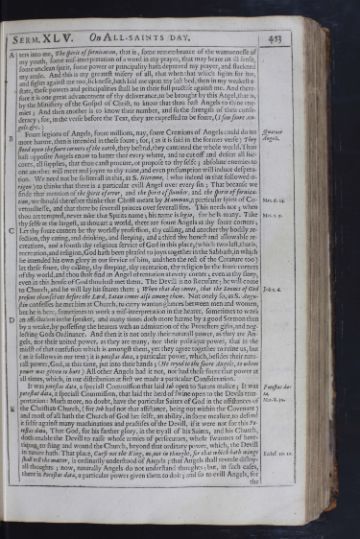 Serm. XLV.
On All-saints day.
453
ters into me, The spirit of fornication, that is, some remembrance of the wantonnesse of
Serm. XLV.
On All-saints day.
453
ters into me, The spirit of fornication, that is, some remembrance of the wantonnesse of
my youth, some mis-interpretation of a word in my prayer, that may beare an ill sense,
some unclean spirit, some power or principality hath depraved my prayer, and slackned
my zeale. And this is my greatest misery of all, that when that which fights for me,
and fights against me too, sicknesse, hath laid me upon my last bed, then in my weakest e-
state, these powers and principalities shall be in their full practise against me. And there-
fore it is one great advancement of thy deliverance, to be brought by this Angel, that is,
by the Ministery of the Gospel of Christ, to know that thou hast Angels to thine ene-
mies; And then another is to know their number, and so the strength of their confe-
deracy; for, in the verse before the Text, they are expressed to be foure, (I saw foure An-
gels &c.)
Foure legions of Angels, foure millions, nay, Quatuor
Angeli. foure Creations of Angels could do no
more harme, then is intended in these foure; for, (as it is said in the former verse) They
stood upon the foure corners of the earth, they bestrid, they cantoned the whole world. Thou
hast opposite Angels enow to batter thee every where, and to cut off and defeat all suc-
cours, all supplies, that thou canst procure, or propose to thy selfe; absolute enemies to
one another will meet and joyne to thy ruine, and even presumption will induce despera-
tion. We need not be so literall in this, as S. Hierome, (who indeed in that followed O-
rigen) to thinke that there is a particular evill Angel over every sin; That because we
finde that mention of the spirit of error, and the spirit of slumber, and the spirit of fornica-
tion, we should therefore thinke that Christ meant by Mammon,Mat. 6.24. a particular spirit of Co-
vetousnesse, and that there be severall princes over severall sins. This needs not; when
thou art tempted, never aske that Spirits name; his name is legio, for he is many.Mar. 5.9. Take
thy selfe at the largest, as thou art a world, there are foure Angels at thy foure corners;
Let thy foure corners be thy worldly profession, thy calling, and another thy bodily re-
fection, thy eating, and drinking, and sleeping, and a third thy honest and allowable re-
creations, and a fourth thy religious service of God in this place, (which two last, that is,
recreation, and religion, God hath been pleased to joyn together in the Sabbath, in which
he intended his own glory in our service of him, and then the rest of the Creature too)
let these foure, thy calling, thy sleeping, thy recreation, thy religion be the foure corners
of thy world, and thou shalt find an Angel of tentation at every corner; even in thy sleep,
even in this house of God thou hast met them. The Devill is no Recusant; he will come
to Church, and he will lay his snares there; When that day comes,Job 1.6. that the Sonnes of God
present themselves before the Lord, Satan comes also among them. Not onely so, as S. Augu-
stin confesses he met him at Church, to carry wanton glances between men and women,
but he is here, sometimes to work a mis-interpretation in the hearer, sometimes to work
an affectation in the speaker, and many times doth more harme by a good Sermon then
by a weake, by possessing the hearers with an admiration of the Preachers gifts, and neg-
lecting Gods Ordinance. And then it is not onely their naturall power, as they are An-
gels, nor their united power, as they are many, nor their politique power, that in the
midst of that confusion which is amongst them, yet they agree together to ruine us, but
(as it follows in our text) it is potestas data, a particular power, which, besides their natu-
rall power, God, at this time, put into their hands; (He cryed to the foure Angels, to whom
power was given to hurt) All other Angels had it not, nor had these foure that power at
all times, which, in our distribution at first we made a particular Consideration.
It was potestas data, a speciall Commission that laid Iob open to Satans malice;Potestas da-
ta. It was
potestas data, a speciall Commission, that laid the herd of swine open to the Devils tran-
portation: Much more, no doubt, Mat. 8.32. have the particular Saints of God in the assistances of
the Christian Church, (for Iob had not that assistance, being not within the Covenant)
and most of all hath the Church of God her selfe, an ability, in some measure, to defend
it selfe against many machinations and practises of the Devill, if it were not for this Po-
testas data, That God, for his farther glory, in the tryall of his Saints, and his Church,
doth enable the Devill to raise whole armies of persecutors, whole swarmes of here-
tiques, to sting and wound the Church, beyond that ordinary power, which, the Devill
in nature hath. That place, Curse not the King, no, not in thought,Eccles. 10.20. for that which hath wings
shall tell the matter, is ordinarily understood of Angels; that Angels shall reveale disloy-
all thoughts; now, naturally Angels do not understand thoughts; but, in such cases,
there is Potestas data, a particular power given them to do it; and so to evill Angels, for the
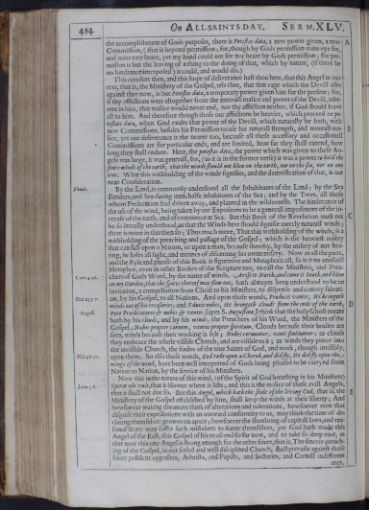 454
On All-saints day.
Serm. XLV.
the accomplishment of Gods purposes, there is Potestas data, a new power given, a new
454
On All-saints day.
Serm. XLV.
the accomplishment of Gods purposes, there is Potestas data, a new power given, a new
Commission, (that is beyond permission; for, though by Gods permission mine eye see,
and mine eare heare, yet my hand could not see nor heare by Gods permission; for per-
mission is but the leaving of a thing to the doing of that, which by nature, (if there be
no hindrance interposed) it could, and would do.)
This comfort then, and this hope of deliverance hast thou here, that this Angel in our
text, that is, the Ministery of the Gospel, tels thee, that that rage which the Devill uses
against thee now, is but Potestas data, a temporary power given him for the present; for,
if thy afflictions were altogether from the naturall malice and power of the Devill, inhe-
rent in him, that malice would never end, nor thy affliction neither, if God should leave
all to him. And therefore though those our afflictions be heavier, which proceed ex po-
testate data, when God exalts that power of the Devill, which naturally he hath, with
new Commissions, besides his Permission to use his naturall strength, and naturall ma-
lice, yet our deliverance is the nearer too, because all these accessory and occasionall
Commissions are for particular ends, and are limited, how far they shall extend, how
long they shall endure. Here, the potestas data, the power which was given to these An-
gels was large, it was generall, for, (as it is in the former verse) it was a power to hold the
foure winds of the earth, that the winde should not blow on the earth, nor on the sea, nor on any
tree. What this withholding of the winde signifies, and the damnification of that, is our
next Consideration.
By the Land, Venti. is commonly understood all the Inhabitants of the Land; by the Sea
Ilanders, and Sea-faring men, halfe inhabitants of the Sea; and by the Trees, all those
whom Persecution had driven away, and planted in the wildernesse. The hinderance of
the use of the wind, being taken by our Expositors to be a generall impediment of the in-
crease of the earth, and of commerce at Sea. But this Book of the Revelation must not
be so literally understood, as that the Winds here should signifie meerly naturall winds;
there is more in this then so; Thus much more, That this withholding of the winds, is a
withholding of the preaching and passage of the Gospel; which is the heaviest misery
that can fall upon a Nation, or upon a man, because thereby, by the misery of not hea-
ring, he loses all light, and meanes of discerning his owne misery. Now as all the parts,
and the style and phrase of this Book is figurative and Metaphoricall, so is it no unusuall
Metaphor, even in other Bookes of the Scripture too, to call the Ministers, and Prea-
chers of Gods Word, Cant. 4.16. by the name of winds. Arise O North, and come O South, and blow
on my Garden, that the spices thereof may flow out, hath alwayes been understood to be an
invitation, a compellation from Christ to his Ministers, to dispense and convey salvati-
on, Psal. 135.7. by his Gospel, to all Nations. And upon those words, Producit ventos, He bringeth
winds out of his treasuries, and Educit nubes, He bringeth clouds from the ends of the earth,
Puto Prædicatores & nubes & ventos,August. sayes S. Augustine, I think that the holy Ghost means
both by his clouds, and by his winds, the Preachers of his Word, the Ministers of the
Gospel; Nubes propter carnem, ventos propter spiritum, Clouds because their bodies are
seen, winds because their working is felt; Nubes cernuntur, venti sentiuntur; as clouds
they embrace the whole visible Church, and are visible to it; as winds they pierce into
the invisible Church, the soules of the true Saints of God, and work, though invisibly,
upon them.Psal 18.10. So also those words, God rode upon a Cherub, and did fly, He did fly upon the
wings of the wind, have been well interpreted of Gods being pleased to be carryed from
Nation to Nation, by the service of his Ministers.
Now this is the nature of this wind, (of the Spirit of God breathing in his Ministers)
Spirat ubi vult,John 3.8. that it blowes where it lists; and this is the malice of these evill Angels,
that it shall not doe so. But this Angel, which hath the seale of the living God, that is, the
Ministery of the Gospel established by him, shall keep the winds at their liberty; And
howsoever waking dreamers think of alterations and tolerations, howsoever men that
disguise their expectations with an outward conformity to us, may think the time of de-
claring themselves growes on apace; howsoever the slumbring of capitall laws, and rea-
sonofson of State may suffer such mistakers to flatter themselves, yet God hath made this
Angel of the East, this Gospel of his to ascend so far now, and to take so deep root, as
that now this one Angel is strong enough for the other foure, that is, The sincere preach-
ing of the Gospel, in our setled and well disciplined Church, shall prevaile against those
foure pestilent opposites, Atheists, and Papists, and Sectaries, and Carnall indifferent men,
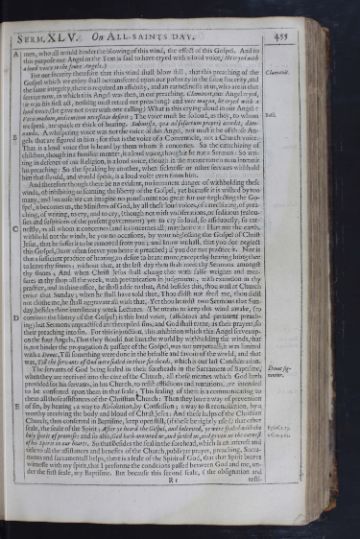 Serm. XLV.
On All-saints day.
455
men, who all would hinder the blowing of this wind, the effect of this Gospel. And to
Serm. XLV.
On All-saints day.
455
men, who all would hinder the blowing of this wind, the effect of this Gospel. And to
this purpose our Angel in the Text is said to have cryed with a loud voice, (He cryed with
a loud voice to the foure Angels.)
For our security therefore that this wind shall blow still, Clamavit. that this preaching of the
Gospel which we enjoy shall be transferred upon our posterity in the same sincerity, and
the same integrity, there is required an assiduity, and an earnestnesse in us, who are in that
service now, in which this Angel was then, in our preaching. Clamavit, our Angel cryed,
(it was his first act, nothing must retard our preaching) and voce magna, he cryed with a
loud voice; (he gave not over with one calling) What is this crying aloud in our Angel?
Vocis modum, audientium necessitas definit; The voice must be so loud, as they, Basil. to whom
we speak, are quick or thick of hearing. Submissa, quæ ad susurrum propriè accedit, dam-
nanda. A whispering voice was not the voice of this Angel, nor must it be of those An-
gels that are figured in him; for that is the voice of a Conventicle, not a Church voice.
That is a loud voice that is heard by them whom it concernes. So the catechizing of
children, though in a familiar manner, is a loud voice, though it be not a Sermon: So wri-
ting in defence of our Religion, is a loud voice, though in the meane time a man intermit
his preaching: So the speaking by another, when sicknesse or other services withhold
him that should, and would speak, is a loud voice even from him.
And therefore though there be no evident, no imminent danger of withholding these
winds, of inhibiting or scanting the liberty of the Gospel, yet because it is wished by too
many, and because we can imagine no punishment too great for our neglecting the Go-
spel, it becomes us, the Ministers of God, by all these loud voices, of catechizing, of prea-
ching, of writing, to cry, and to cry, (though not with vociferations, or seditious jealou-
sies and suspitions of the present government) yet to cry so loud, so assiduously, so ear-
nestly, as all whom it concernes (and it concernes all) may heare it: Hurt not the earth,
withhold not the winds, be you no occasions, by your neglecting the Gospel of Christ
Jesus, that he suffer it to be removed from you; and know withall, that you doe neglect
this Gospel, (how often soever you heare it preached) if you doe not practice it. Nor is
that a sufficient practice of hearing, to desire to heare more, except thy hearing bring thee
to leave thy sinnes; without that, at the last day thou shalt meet thy Sermons amongst
thy sinnes; And when Christ Jesus shall charge thee with false weights and mea-
sures in thy shop all the week, with prevarication in judgement, with extortion in thy
practice, and in thine office, he shall adde to that, And besides this, thou wast at Church
twice that Sunday; when he shall have told thee, Thou didst not feed me, thou didst
not clothe me, he shall aggravate all with that, Yet thou heardst two Sermons that Sun-
day, besides thine interlineary week Lectures. The means to keep this wind awake, (to
continue the liberty of the Gospel) is this loud voice, (assiduous and pertinent preach-
ing) but Sermons unpractised are threepiled sins, and God shall turne, as their prayers, so
their preaching into sin. For this injunction, this inhibition which this Angel serves up-
on the four Angels, That they should not hurt the world by withholding the winds, that
is, not hinder the propagation & passage of the Gospel, was not perpetuall; it was limited
with a Donec, Till something were done in the behalfe and favour of the world, and that
was, Till the servants of God were sealed in their foreheads, which is our last Consideration.
The servants of God being sealed in their foreheads in the Sacrament of Baptisme, Donec sig-
nentur.
when they are received into the care of the Church, all those meanes which God hath
provided for his servants, in his Church, to resist afflictions and tentations, are intended
to be conferred upon them in that seale; This sealing of them is a communicating to
them all those assistances of the Christian Church: Then they have a way of prevention
of sin, by hearing; a way to Absolution, by Confession; a way to Reconciliation, by a
worthy receiving the body and bloud of Christ Jesus: And these helps of the Christian
Church, thus conferred in Baptisme, keep open still, (if these be rightly used) that other
seale, the seale of the Spirit; After ye heard the Gospel, and beleeved, Ephes. 1.13. ye were sealed with the
holy spirit of promise: and so also, 2 Cor. 1.22. God hath anointed us, and sealed us, and given us the earnest
of his Spirit in our hearts. So that besides the seal in the forehead, which is an interest and
title to all the assistances and benefits of the Church, publique prayer, preaching, Sacra-
ments and sacramentall helps, there is a seale of the Spirit of God, that that Spirit beares
witnesse with my spirit, that I performe the conditions passed between God and me, un-
der the first seale, my Baptisme. But because this second seale, (the obsignation and Rr testi-
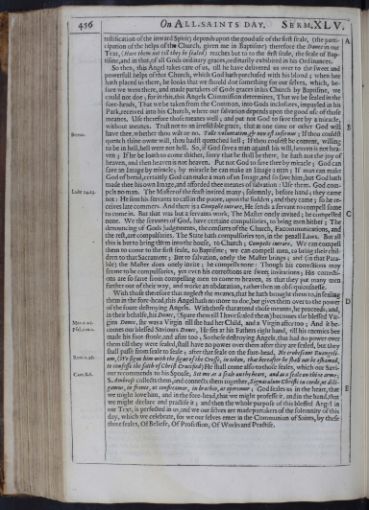 456
On All-saints day.
Serm. XLV.
testification of the inward Spirit) depends upon the good use of the first seale, (the parti-
456
On All-saints day.
Serm. XLV.
testification of the inward Spirit) depends upon the good use of the first seale, (the parti-cipation of the helps of the Church, given me in Baptisme) therefore the Donec in our
Text, (Hurt them not till they be sealed) reaches but to to the first seale, the seale of Bap-
tisme, and in that, of all Gods ordinary graces, ordinarily exhibited in his Ordinances.
So then, this Angel takes care of us, till he have delivered us over to the sweet and
powerfull helps of that Church, which God hath purchased with his blood; when hee
hath placed us there, he looks that we should doe something for our selves, which, be-
fore we were there, and made partakers of Gods graces in his Church by Baptisme, we
could not doe; for in this, this Angels Commission determines, That we be sealed in the
fore-heads, That we be taken from the Common, into Gods inclosures, impayled in his
Park, received into his Church, where our salvation depends upon the good use of those
meanes. Use therefore those meanes well; and put not God to save thee by a miracle,
without meanes. Trust not to an irresistible grace, that at one time or other God will
have thee, Bernar. whether thou wilt or no. Tolle voluntatem, & non est infernus; If thou couldst
quench thine owne will, thou hadst quenched hell; If thou couldst be content, willing
to be in hell, hell were not hell. So, if God save a man against his will, heaven is not hea-
ven; If he be loath to come thither, sorry that he shall be there, he hath not the joy of
heaven, and then heaven is not heaven. Put not God to save thee by miracle; God can
save an Image by miracle; by miracle he can make an Image a man; If man can make
God of bread, certainly God can make a man of an Image, and so save him; but God hath
made thee his own Image, and afforded thee meanes of salvation: Use them. God com-
pels no man.Luke 14.23. The Master of the feast invited many; solemnly, before hand; they came
not: He sent his servants to call in the poore, upon the sudden; and they came; so he re-
ceives late commers. And there is a Compelle intrare, He sends a servant to compell some
to come in. But that was but a servants work, The Master onely invited; he compelled
none. We the servants of God, have certaine compulsories, to bring men hither; The
denouncing of Gods Judgements, the censures of the Church, Excommunications, and
the rest, are compulsories. The State hath compulsories too, in the penall Laws. But all
this is but to bring them into the house, to Church; Compelle intrare. We can compell
them to come to the first seale, to Baptisme; we can compell men, to bring their chil-
dren to that Sacrament; But to salvation, onely the Master brings; and (in that Para-
ble) the Master does onely invite; he compells none: Though his corrections may
seeme to be compulsories, yet even his corrections are sweet invitations; His correcti-
ons are so farre from compelling men to come to heaven, as that they put many men
farther out of their way, and worke an obduration, rather then an obsequiousnesse.
With those therefore that neglect the meanes, that he hath brought them to, in sealing
them in the fore-head, this Angel hath no more to doe, but gives them over to the power
of the foure destroying Angels. With those that attend those meanns, he proceeds; and,
in their behalfe, his Donec, (Spare them till I have sealed them) becomes the blessed Vir-
gins Donec,Mat. 1.25. she was a Virgin till she had her Child, and a Virgin after too; And it be-
comes our blessed Saviours Psal. 110.1. Donec, He sits at his Fathers right hand, till his enemies bee
made his foot-stoole, and after too; So these destroying Angels, that had no power over
them till they were sealed, shall have no power over them after they are sealed, but they
shall passe from seale to seale; after that seale on the fore-head, Ne erubeseant Euangeli-
um,Rom. 1.16. (We signe him with the signe of the Crosse, in token, that hereafter he shall not be ashamed,
to confesse the faith of Christ Crucified) He shall come also to those seales, which our Savi-
our recommends to his Spouse, Cant. 8.6. Set me as a seale on thy heart, and as a seale on thine arme;
S. Ambrose collects them, and connects them together, Signaculum Christi in corde, ut dili-
gamus, in fronte, ut confiteamur, in brachio, ut operemur; God seales us in the heart, that
we might love him, and in the fore-head, that we might professe it, and in the hand, that
we might declare and practise it; and then the whole purpose of this blessed Angel in
our Text, is perfected in us, and we our selves are made partakers of the solemnity of this
day, which we celebrate, for we our selves enter in the Communion of Saints, by these
three seales, Of Beliefe, Of Profession, Of Works and Practise.
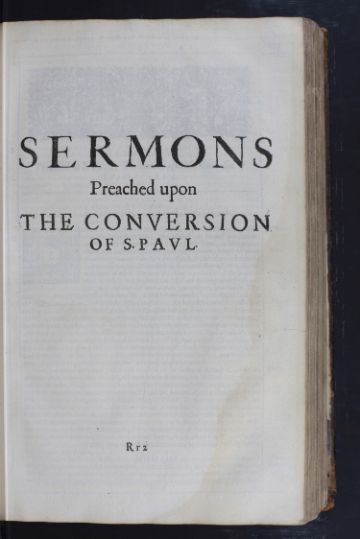
SERMONS
Preached upon
THE CONVERSION
OF S. PAVL. Rr2
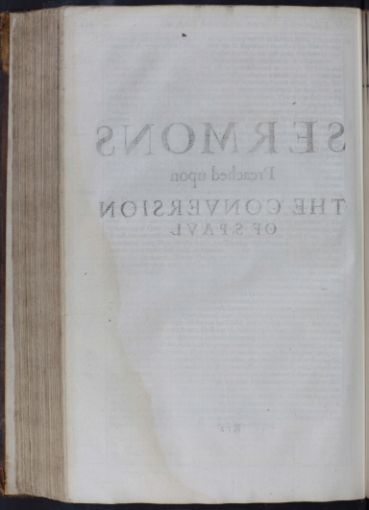
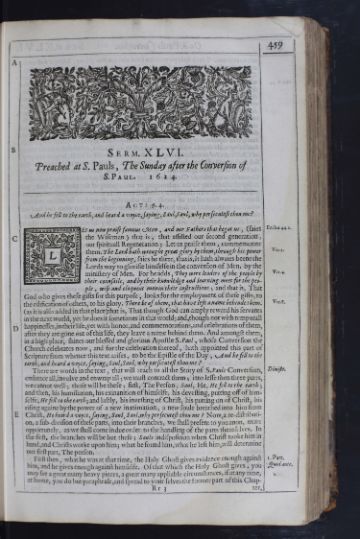 459
459
Serm. XLVI.
Preached at S. Pauls, The Sunday after the Conversion of
S. Paul. 1624.
Acts 9.4.
And he fell to the earth, and heard a voyce, saying, Saul, Saul, why persecutest thou me? LEtLet us now praise famous Men, and our Fathers that begat us, Ecclus. 44.1. (saies
the Wiseman) that is, that assisted our second generation,
our spirituall Regeneration; Let us praise them, commemorate
them. Ver. 2. The Lord hath wrought great glory by them, through his power
from the beginning, saies he there, that is, It hath alwaies beene the
Lords way to glorifie himselfe in the conversion of Men, by the
ministery of Men. For he adds, Ver. 4. They were leaders of the people by
their counsaile, and by their knowledge and learning meet for the peo-
ple, wise and eloquent men in their instructions; and that is, That
God who gives these gifts for this purpose, looks for the employment of these gifts, to
the edification of others, to his glory. There be of them, that have left a name behinde them.Ver. 8.
(as it is also added in that place) that is, That though God can amply reward his servants
in the next world, yet he does it sometimes in this world; and, though not with temporall
happinesses, in their life, yet with honor, and commemorations, and celebrations of them,
after they are gone out of this life, they leave a name behind them. And amongst them,
in a high place, shines our blessed and glorious Apostle S. Paul, whose Conversion the
Church celebrates now, and for the celebration thereof, hath appointed this part of
Scripture from whence this text arises, to be the Epistle of the Day, And he fell to the
earth, and heard a voyce, saying, Saul, Saul, why persecutest thou me? There are words in the text, that will reach to all the Story of S. Pauls Conversion, Divisio.
embrace all, involve and enwrap all; we must contract them; into lesse then three parts,
we cannot well; those will be these; first, The Person, Saul, He, He fell to the earth;
and then, his humiliation, his exinanition of himselfe, his devesting, putting off of him-
selfe, He fell to the earth; and lastly, his investing of Christ, his putting on of Christ, his
rising againe by the power of a new inanimation, a new soule breathed into him from
Christ, He heard a voyce, saying, Saul, Saul, why persecutest thou me? Now, a re-distributi-
on, a sub-division of these parts, into their branches, we shall present to you anon, more
opportunely, as we shall come in due order to the handling of the parts themselves. In
the first, the branches will be but these; Sauls indisposition when Christ tooke him in
hand, and Christs worke upon him; what he found him, what he left him, will determine
our first part, The person. First then, what he was at that time, 1. Part. the Holy Ghost gives evidence enough against
him, and he gives enough against himselfe. Quid ante. Of that which the Holy Ghost gives, you
may see a great many heavy pieces, a great many appliable circumstances, if at any time,
at home, you do but paraphrase, and spread to your selves the former part of this Chap-
Rr3 ter,
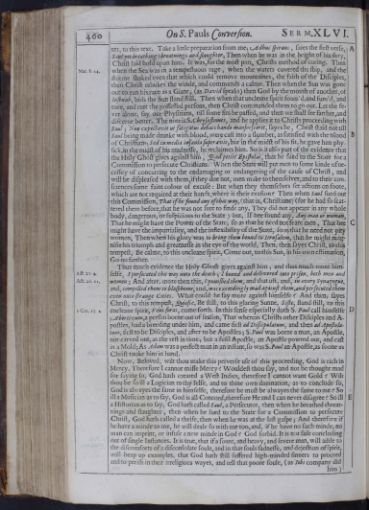 460
On S. Pauls Conversion.
Serm. XLVI.
ter, to this text. Take a little preparation from me; Adhuc spirans, saies the first verse,
460
On S. Pauls Conversion.
Serm. XLVI.
ter, to this text. Take a little preparation from me; Adhuc spirans, saies the first verse,
Saul yet breathing threatnings and slaughter, Then when he was in the height of his fury,
Christ laid hold upon him. It was, for the most part, Christs method of curing. Then
when the Sea was in a tempestuous rage, Mat. 8.24. when the waters covered the ship, and the
storme shaked even that which could remove mountaines, the faith of the Disciples,
then Christ rebukes the winde, and commands a calme. Then when the Sun was gone
out to run his race as a Giant, (as David speaks) then God by the mouth of another, of
Ioshuah, bids the Sun stand still. Then when that uncleane spirit foam'd, and fum'd, and
tore, and rent the possessed persons, then Christ commanded them to go out. Let the fe-
ver alone, say our Physitians, till some fits be passed, and then we shall see farther, and
discerne better. The note is S. Chrysostomes, and he applies it to Christs proceeding with
Saul; Non expectavit ut fatigatus debacchando mansuesceret, sayes he, Christ staid not till
Saul being made drunke with blood, were cast into a slumber, as satisfied with the blood
of Christians; Sed in media insania superavit, but in the midst of his fit, he gave him phy-
sick, in the midst of his madnesse, he reclaimes him. So is it also part of the evidence that
the Holy Ghost gives against him, Quod petiit Epistolas, that he sued to the State for a
Commission to persecute Christians. When the State will put men to some kinde of ne-
cessity of concurring to the endamaging or endangering of the cause of Christ, and
will be displeased with them, if they doe not, men make to themselves, and to their con-
sciences some faint colour of excuse: But when they themselves set actions on foote,
which are not required at their hands, where is their evasion? Then when Saul sued out
this Commission, That if he found any of that way, (that is, Christians) (for he had so scat-
tered them before, that he was not sure to finde any, They did not appeare in any whole
body, dangerous, or suspicious to the State) but, If hee found any, Any man or woman,
That he might have the Power of the State, so as that he need not feare men, That hee
might have the impartiality, and the inflexibility of the State, so as that he need not pity
women, Then when his glory was to bring them bound to Ierusalem, that he might mag-
nifie his triumph and greatnesse in the eye of the world, Then, then sayes Christ, to this
tempest, Be calme, to this uncleane spirit, Come out, to this Sun, in his own estimation,
Go no farther. Thus much evidence the Holy Ghost gives against him; and thus much more him-
selfe, Act. 22.4. I persecuted this way unto the death; I bound and delivered into prison, both men and
women;Act. 26.11. And after, more then this, I punished them, and that oft, and, in every Synagogue,
and, compelled them to blaspheme, and, was exceedingly mad against them, and persecuted them
even unto strange Cities. What could he say more against himselfe? And then, sayes
Christ, to this tempest, Quiesce, Be still, to this glaring Sunne, Siste, stand still, to this
uncleane spirit, 1 Cor. 15.2. Veni foras, come forth. In this sense especially doth S. Paul call himselfe
Abortivum, a person borne out of season, That whereas Christs other Disciples and A-
postles, had a breeding under him, and came first ad Discipulatum, and then ad Apostola-
tum, first to be Disciples, and after to be Apostles; S. Paul was borne a man, an Apostle,
not carved out, as the rest in time; but a fusil Apostle, an Apostle powred out, and cast
in a Mold; As Adam was a perfect man in an instant, so was S. Paul an Apostle, as soone as
Christ tooke him in hand. Now, Beloved, wilt thou make this perverse use of this proceeding, God is rich in
Mercy, Therefore I cannot misse Mercy? Wouldest thou say, and not be thought mad
for saying so, God hath created a West Indies, therefore I cannot want Gold? Wilt
thou be so ill a Logician to thy selfe, and to thine own damnation, as to conclude so,
God is alwayes the same in himselfe, therefore he must be alwayes the same to me? So
ill a Musician as to say, God is all Concord, therefore He and I can never disagree? So ill
a Historian as to say, God hath called Saul, a Persecutor, then when he breathed threat-
nings and slaughter, then when he sued to the State for a Commission to persecute
Christ, God hath called a theife, then when he was at the last gaspe; And therefore if
he have a minde to me, he will deale so with me too, and, if he have no such minde, no
man can imprint, or infuse a new minde in God? God forbid. It is not safe concluding
out of single Instances. It is true, that if a soure, and heavy, and severe man, will adde to
the discomforts of a disconsolate soule, and in that souls sadnesse, and dejection of spirit,
will heap up examples, that God hath still suffered high-minded sinners to proceed
and to perish in their irreligious wayes, and tell that poore soule, (as Iobs company did him)
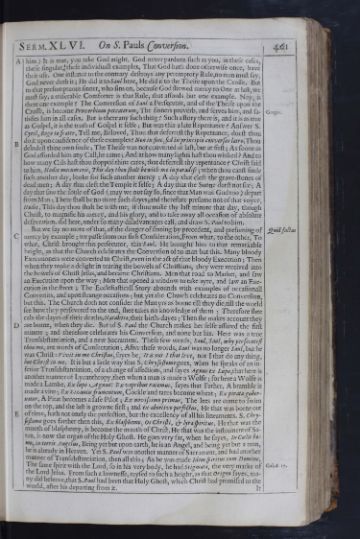 Serm. XLVI.
On S. Pauls Conversion.
461
him) It is true, you take God aright, God never pardons such as you, in these cases,
Serm. XLVI.
On S. Pauls Conversion.
461
him) It is true, you take God aright, God never pardons such as you, in these cases,
these singular, these individuall examples, That God hath done otherwise once, have
their use. One instance to the contrary destroys any peremptory Rule, no man must say,
God never doth it; He did it to Saul here, He did it to the Theife upon the Crosse. But
to that presumptuous sinner, who sins on, because God shewed mercy to One at last, we
must say, a miserable Comforter is that Rule, that affords but one example. Nay, is
there one example? The Conversion of Saul a Persecutor, and of the Theife upon the
Crosse, is become Proverbium peccatorum, The sinners proverb, and serves him, Gregor. and sa-
tisfies him in all cases. But is there any such thing? Such a story there is, and it is as true
as Gospel, it is the truth of Gospel it selfe; But was this a late Repentance? Answer S.
Cyril, Rogo te frater, Tell me, Beloved, Thou that deferrest thy Repentance, doest thou
do it upon confidence of these examples? Non in fine, sed in principio conversus latro; Thou
deludest thine own soule; The Theife was not converted at last, but at first; As soone as
God afforded him any Call, he came; And at how many lights hast thou winked? And to
how many Cals hast thou stopped thine eares, that deferrest thy repentance? Christ said
to him, Hodie mecum eris, This day thou shalt be with me in paradise; when thou canst finde
such another day, looke for such another mercy; A day that cleft the grave-stones of
dead men; A day that cleft the Temple it selfe; A day that the Sunne durst not see; A
day that saw the soule of God (may we not say so, since that Man was God too) depart
from Man; There shall be no more such dayes; and therefore presume not of that voyce,
Hodie, This day thou shalt be with me, if thou make thy last minute that day, though
Christ, to magnifie his mercy, and his glory, and to take away all occasion of absolute
desperation, did here, under so many disadvantages call, and draw S. Paul to him. But we say no more of that, of the danger of sinning by precedent, Quid factus and presuming of
mercy by example; we passe from our first Consideration, From what, to the other, To
what, Christ brought this persecutor, this Saul. He brought him to that remarkable
height, as that the Church celebrates the Conversion of no man but this. Many bloody
Executioners were converted to Christ, even in the act of that bloody Execution; Then
when they tooke a delight in tearing the bowels of Christians, they were received into
the bowels of Christ Jesus, and became Christians. Men that road to Market, and saw
an Execution upon the way; Men that opened a window to take ayre, and saw an Exe-
cution in the street; The Ecclesiasticall Story abounds with examples of occasionall
Convertits, and upon strange occasions; but yet the Church celebrates no Conversion,
but this. The Church doth not consider the Martyrs as borne till they die; till the world
see how they persevered to the end, shee takes no knowledge of them; Therefore shee
cals the dayes of their deaths, Natalitia, their birth-dayes; Then she makes account they
are borne, when they die. But of S. Paul the Church makes her selfe assured the first
minute; and therefore celebrates his Conversion, and none but his. Here was a true
Transubstantiation, and a new Sacrament. These few words, Saul, Saul, why persecutest
thou me, are words of Consecration; After these words, Saul was no longer Saul, but he
was Christ: Vivit in me Christus, sayes he, It is not I that live, not I that do any thing,
but Christ in me. It is but a little way that S. Chrysostome goes, when he speaks of an in-
ferior Transubstantiation, of a change of affections, and sayes Agnus ex Lupo, that here is
another manner of Lycanthropy, then when a man is made a Wolfe; for here a Wolfe is
made a Lambe, Ex lupo Agnus. Ex vepribus racemus, sayes that Father, A bramble is
made a vine; Ex zizaniis frumentum, Cockle and tares become wheat; Ex pirata guber-
nator, A Pirat becomes a safe Pilot; Ex novissimo primus, The lees are come to swim
on the top, and the last is growne first; and ex abortivo perfectus, He that was borne out
of time, hath not onely the perfection, but the excellency of all his lineaments. S. Chry-
sostome goes farther then this, Ex blasphemo, Os Christi, & lyraspiritus, He that was the
mouth of blasphemy, is become the mouth of Christ, He that was the instrument of Sa-
tan, is now the organ of the Holy Ghost. He goes very far, when he sayes, In Cœlis ho-
mo, in terris Angelus, Being yet but upon earth, he is an Angel, and being yet but a man,
he is already in Heaven. Yet S. Paul was another manner of Sacrament, and had another
manner of Transubstantiation, then all this; As he was made Idem spiritus cum Domino,
Gal. 6.17. The same spirit with the Lord, so in his very body, he had Stigmata, the very marks of
the Lord Jesus. From such a lownesse, raysed to such a height, as that Origen sayes, ma-
ny did beleeve, that S. Paul had been that Holy Ghost, which Christ had promised to the
world, after his departing from it. It
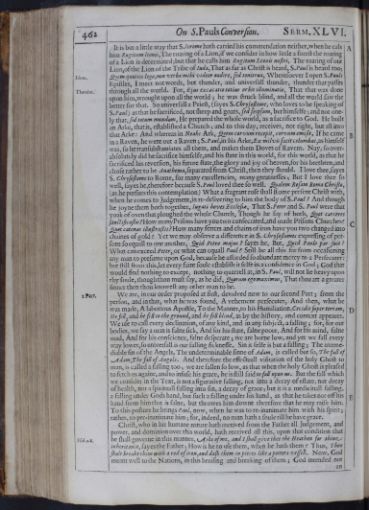 462
On S. Pauls Conversion.
Serm. XLVI.
It is but a little way that S. Ierome hath carried his commendation neither, when he cals
462
On S. Pauls Conversion.
Serm. XLVI.
It is but a little way that S. Ierome hath carried his commendation neither, when he cals
him Rugitum leonis, The roaring of a Lion, if we consider in how little a forest the roaring
of a Lion is determined; but that he calls him Rugitum Leonis nostri, The roaring of our
Lion, of the Lion of the Tribe of Iuda, That as far as Christ is heard, S. Paul is heard too;
Idem. Quem quoties lego, non verba mihi videor audire, sed tonitrua, Wheresoever I open S. Pauls
Epistles, I meet not words, but thunder, and universall thunder, thunder that passes
through all the world.Theodor. For, Ejus excæcatio totius orbis illuminatio, That that was done
upon him, wrought upon all the world; he was struck blind, and all the world saw the
better for that. So universall a Priest, (sayes S. Chrysostome, who loves to be speaking of
S. Paul) as that he sacrificed, not sheep and goats, sed seipsum, but himselfe; and not one-
ly that, sed totum mundum, He prepared the whole world, as a sacrifice to God. He built
an Arke, that is, established a Church; and to this day, receives, not eight, but all into
that Arke: And whereas in Noahs Ark, Quem corvum recepit, corvum emisit, If he came
in a Raven, he went out a Raven; S. Paul, in his Arke, Ex milvis facit columbas, as himself
was, so he transubstantiates all them, and makes them Doves of Ravens. Nay, so over-
absolutely did he sacrifice himselfe, and his state in this world, for this world, as that he
sacrificed his reversion, his future state, the glory and joy of heaven, for his brethren, and
chose rather to be Anathema, separated from Christ, then they should. I love thee, sayes
S. Chrysostome to Rome, for many excellencies, many greatnesses; But I love thee so
well, sayes he, therefore because S. Paul loved thee so well. Qualem Rosam Roma Christo,
(as he pursues this contemplation) What a fragrant rose shall Rome present Christ with,
when he comes to Judgement, in re-delivering to him the body of S. Paul? And though
he joyne them both together, Iugati boves Ecclesiæ, That S. Peter and S. Paul were that
yoak of oxen that ploughed the whole Church, Though he say of both, Quot carceres
sanctificastis? How many Prisons have you two consecrated, and made Prisons Churches?
Quot catenas illustrastis? How many fetters and chains of iron have you two changed into
chaines of gold? Yet we may observe a difference in S. Chrysostomes expressing of per-
sons so equall to one another, Quid Petro majus? sayes he, But, Quid Paulo par fuit?
What can exceed Peter, or what can equall Paul? Still be all this far from occasioning
any man to presume upon God, because he afforded so abundant mercy to a Persecuter:
but still from this, let every faint soule establish it selfe in a confidence in God; God that
would find nothing to except, nothing to quarrell at, in S. Paul, will not lie heavy upon
thy soule, though thou must say, as he did, Quorum ego maximus, That thou art a greater
sinner then thou knowest any other man to be. We are, 2 Part. in our order proposed at first, devolved now to our second Part; from the
person, and in that, what he was found, A vehement persecuter, And then, what he
was made, A laborious Apostle, To the Manner, to his Humiliation, Cecidit super terram,
He fell, and he fell to the ground, and he fell blind, as by the history, and context appeares.
We use to call every declination, of any kind, and in any subject, a falling; for, for our
bodies, we say a man is falne sick, And for his state, falne poore, And for his mind, falne
mad, And for his conscience, falne desperate; we are borne low, and yet we fall every
way lower, so universall is our falling sicknesse. Sin it selfe is but a falling; The irreme-
diable sin of the Angels, The undeterminable sinne of Adam, is called but so, The fall of
Adam, The fall of Angels. And therefore the effectuall visitation of the holy Ghost to
man, is called a falling too; we are fallen so low, as that when the holy Ghost is pleased
to fetch us againe, and to infuse his grace, he is still said to fall upon us. But the fall which
we consider in the Text, is not a figurative falling, not into a decay of estate, nor decay
of health, nor a spirituall falling into sin, a decay of grace; but it is a medicinall falling,
a falling under Gods hand, but such a falling under his hand, as that he takes not off his
hand from him that is falne, but throwes him downe therefore that he may raise him.
To this posture he brings Paul, now, when he was to re-inanimate him with his spirit;
rather, to pre-inanimate him; for, indeed, no man hath a soule till he have grace. Christ, who in his humane nature hath received from the Father all Judgement, and
power, and dominion over this world, hath received all this, upon that condition that
he shall governe in this manner, Psal. 2.8. Aske of me, and I shall give thee the Heathen for thine
inheritance, sayes the Father; How is he to use them, when he hath them? Thus, Thou
shalt breake them with a rod of iron, and dash them in pieces like a potters vessell. Now, God
meant well to the Nations, in this bruising and breaking of them; God intended not an
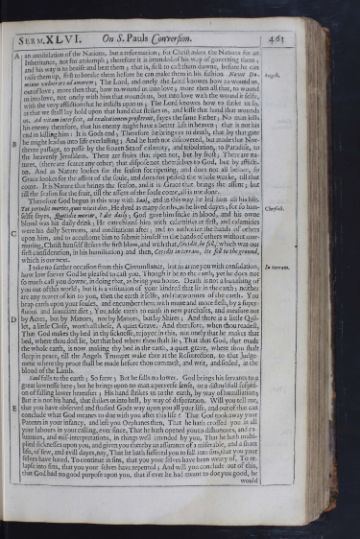 Serm. XLVI.
On S. Pauls Conversion.
463
an annihilation of the Nations, but a reformarionreformation; for Christ askes the Nations for an
Serm. XLVI.
On S. Pauls Conversion.
463
an annihilation of the Nations, but a reformarionreformation; for Christ askes the Nations for an
Inheritance, not for a triumph; therefore it is intended of his way of governing them;
and his way is to bruise and beat them; that is, first to cast them downe, before he can
raise them up, first to breake them before he can make them in his fashion. August. Novit Do-
minus vulnerare ad amorem; The Lord, and onely the Lord knowes how to wound us,
out of love; more then that, how to wound us into love; more then all that, to wound
us into love, not onely with him that wounds us, but into love with the wound it selfe,
with the very affliction that he inflicts upon us; The Lord knowes how to strike us so,
as that we shall lay hold upon that hand that strikes us, and kisse that hand that wounds
us. Ad vitam interficit, ad exaltationem prosternit, sayes the same Father; No man kills
his enemy therefore, that his enemy might have a better life in heaven; that is not his
end in killing him: It is Gods end; Therefore he brings us to death, that by that gate
he might lead us into life everlasting; And he hath not discovered, but made that Nor-
therne passage, to passe by the frozen Sea of calamity, and tribulation, to Paradise, to
the heavenly Jerusalem. There are fruits that ripen not, but by frost; There are na-
tures, (there are scarce any other) that dispose not themselves to God, but by afflicti-
on. And as Nature lookes for the season for ripening, and does not all before, so
Grace lookes for the assent of the soule, and does not perfect the whole worke, till that
come. It is Nature that brings the season, and it is Grace that brings the assent; but
till the season for the fruit, till the assent of the soule come, all is not done. Therefore God begun in this way with Saul, and in this way he led him all his life.
Tot pertulit mortes, quot vixit dies, He dyed as many deaths, as he lived dayes;Chrysost. for so him-
selfe sayes, Quotidie morior, I die daily; God gave him sucke in blood, and his owne
blood was his daily drink; He catechized him with calamities at first, and calamities
were his daily Sermons, and meditations after; and to authorize the hands of others
upon him, and to accustome him to submit himself to the hands of others without mur-
muring, Christ himself strikes the first blow, and with that, Cecidit, he fell, (which was our
first consideration, in his humiliation) and then, Cecidit in terram, He fell to the ground,
which is our next. I take no farther occasion from this Circumstance, but to arme you with consolation,
In terram. how low soever God be pleased to cast you, Though it be to the earth, yet he does not
so much cast you downe, in doing that, as bring you home. Death is not a banishing of
you out of this world; but it is a visitation of your kindred that lie in the earth; neither
are any nearer of kin to you, then the earth it selfe, and the wormes of the earth. You
heap earth upon your soules, and encumber them with more and more flesh, by a super-
fluous and luxuriant diet; You adde earth to earth in new purchases, and measure not
by Acres, but by Manors, nor by Manors, but by Shires; And there is a little Quil-
let, a little Close, worth all these, A quiet Grave. And therefore, when thou readest,
That God makes thy bed in thy sicknesse, rejoyce in this, not onely that he makes that
bed, where thou dost lie, but that bed where thou shalt lie; That that God, that made
the whole earth, is now making thy bed in the earth, a quiet grave, where thou shalt
sleep in peace, till the Angels Trumpet wake thee at the Resurrection, to that Judge-
ment where thy peace shall be made before thou commest, and writ, and sealed, in the
blood of the Lamb. Saul falls to the earth; So farre; But he falls no lower. God brings his servants to a
great lownesse here; but he brings upon no man a perverse sense, or a distrustfull suspiti-
on of falling lower hereafter; His hand strikes us to the earth, by way of humiliation;
But it is not his hand, that strikes us into hell, by way of desperation. Will you tell me,
that you have observed and studied Gods way upon you all your life, and out of that can
conclude what God meanes to doe with you after this life? That God took away your
Parents in your infancy, and left you Orphanes then, That he hath crossed you in all
your labours in your calling, ever since, That he hath opened you to dishonours, and ca-
lumnies, and mis-interpretations, in things well intended by you, That he hath multi-
plied ficknesses upon you, and given you thereby an assurance of a miserable, and a short
life, of few, and evill dayes, nay, That he hath suffered you to fall into sins, that you your
selves have hated, To continue in sins, that you your selves have been weary of, To re-
lapse into sins, that you your selves have repented; And will you conclude out of this,
that God had no good purpose upon you, that if ever he had meant to doe you good, he would
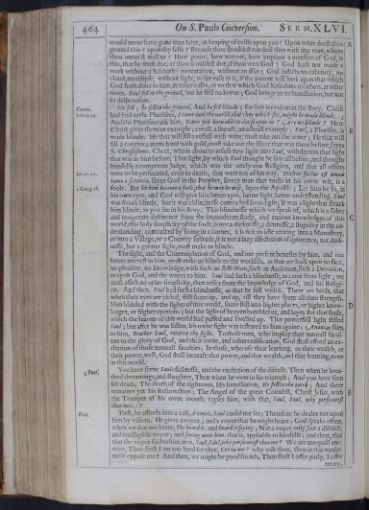 464
On S. Pauls Conversion.
Serm. XLVI.
would never have gone thus farre, in heaping of evills upon you? Upon what doest thou
464
On S. Pauls Conversion.
Serm. XLVI.
would never have gone thus farre, in heaping of evills upon you? Upon what doest thou
ground this? upon thy selfe? Because thou shouldest not deal thus with any man, whom
thou mean'st well to? How poore, how narrow, how impious a measure of God, is
this, that he must doe, as thou wouldest doe, if thou wert God! God hath not made a
week without a Sabbath; no tentation, without an issue; God inflicts no calamity, no
cloud, no eclipse, without light, to see ease in it, if the patient will look upon that which
God hath done to him, in other cases, or to that which God hath done to others, at other
times. Saul fell to the ground, but he fell no lower; God brings us to humiliation, but not
to desperation. He fell; he fell to the ground, Cæcus. And he fell blinde; for so it is evident in the story. Christ
had said to the Pharisees, Iohn 9.39. I came into the world, that they which see, might be made blinde;
And the Pharisees ask him, Have you been able to doe so upon us? Are we blinde? Here
Christ gives them an example; a reall, a literall, an actuall example; Saul, a Pharisee, is
made blinde. He that will fill a vessell with wine, must take out the water; He that will
fill a covetous mans hand with gold, must take out the silver that was there before, sayes
S. Chrysostome. Christ, who is about to infuse new light into Saul, withdrawes that light
that was in him before; That light, by which Saul thought he saw all before, and thought
himselfe a competent Judge, which was the onely true Religion, and that all others
were to be persecuted, Ier. 51.17. even to death, that were not of his way. Stultus factus est omnis
homo à scientia, sayes God in the Prophet, Every man that trusts in his owne wit, is a
foole.1 Cor. 3.18. But let him become a foole, that he may be wise, sayes the Apostle; Let him be so, in
his own eyes, and God will give him better eyes, better light, better understanding. Saul
was struck blinde, but it was a blindnesse contracted from light; It was a light that struck
him blinde, as you see in his story. This blindnesse which we speak of, which is a sober
and temperate abstinence from the immoderate study, and curious knowledges of this
world, this holy simplicity of the soule, is not a darknesse, a dimnesse, a stupidity in the un-
derstanding, contracted by living in a corner, it is not an idle retiring into a Monastery,
or into a Village, or a Country solitude, it is not a lazy affectation of ignorance; not dark-
nesse, but a greater light, must make us blinde. The sight, and the Contemplation of God, and our present benefits by him, and our
future interest in him, must make us blinde to the world so, as that we look upon no face,
no pleasure, no knowledge, with such an Affection, such an Ambition, such a Devotion,
as upon God, and the wayes to him. Saul had such a blindnesse, as came from light; we
must affect no other simplicity, then arises from the knowledge of God, and his Religi-
on. And then, Saul had such a blindnesse, as that he fell with it. There are birds, that
when their eyes are cieled, still soare up, and up, till they have spent all their strength.
Men blinded with the lights of this world, soare still into higher places, or higher know-
ledges, or higher opinions; but the light of heaven humbles us, and layes flat that soule,
which the leaven of this world had puffed and swelled up. That powerfull light felled
Saul; but after he was fallen, his owne sight was restored to him againe; Ananias saies
to him, Brother Saul, receive thy sight. To those men, who imploy their naturall facul-
ties to the glory of God, and their owne, and others edification, God shall afford an ex-
altation of those naturall faculties; In those, who use their learning, or their wealth, or
their power, well, God shall increase that power, and that wealth, and that learning, even
in this world. You have seene Sauls sicknesse, 3 Part. and the exaltation of the disease, Then when he brea-
thed threatnings, and slaughter, Then when he went in his triumph; And you have seen
his death, The death of the righteous, His humiliation, He fell to the earth; And there
remaines yet his Resurrection; The Angel of the great Counsell, Christ Jesus, with
the Trumpet of his owne mouth, rayses him, with that, Saul, Saul, why persecutest
thou mee? First, Vox. he affords him a call, A voyce. Saul could not see; Therefore he deales not upon
him by visions. He gives a voyce; and a voyce that he might heare; God speaks often,
when we doe not heare; He heard it, and heard it saying; Not a voyce only, but a distinct,
and intelligible voyce; and saying unto him, that is, appliable to himselfe; and then, that
that the voyce said to him, was, Saul, Saul, why persecutest thou me? We are unequall ene-
mies, Thou seest I am too hard for thee, Cur tu me? why wilt thou, thou in this weake-
nesse oppose me? And then, we might be good friends, Thou seest I offer parly, I offer treaty,
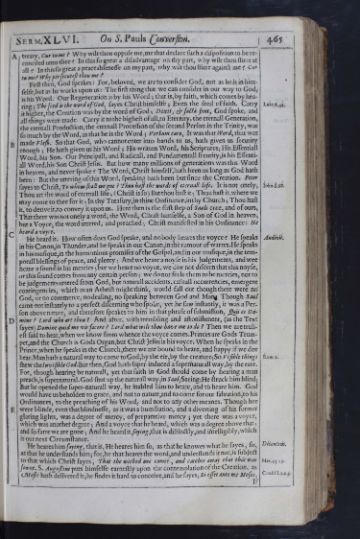 Serm. XLVI.
On S. Pauls Conversion.
465
treaty, Cur tu me? Why wilt thou oppose me, me that declare such a disposition to be re-
Serm. XLVI.
On S. Pauls Conversion.
465
treaty, Cur tu me? Why wilt thou oppose me, me that declare such a disposition to be re-conciled unto thee? In this so great a disadvantage on thy part, why wilt thou stirre at
all? In this so great a peaceablenesse on my part, why wilt thou stirre against me? Cur
tu me? Why persecutest thou me? First then, God speakes: For, beloved, we are to consider God, not as he is in him-
selfe, but as he works upon us: The first thing that we can consider in our way to God,
is his Word. Our Regeneration is by his Word; that is, by faith, which comes by hea-
ring; The seed is the word of God, sayes Christ himselfe; Even the seed of faith.Luke 8.11. Carry
it higher, the Creation was by the word of God; Dixit, & facta sunt, God spoke, and
all things were made. Carry it to the highest of all, to Eternity, the eternall Generation,
the eternall Production, the eternall Procession of the second Person in the Trinity, was
so much by the Word, as that he is the Word; Verbum caro, It was that Word, that was
made Flesh. So that God, who cannot enter into bands to us, hath given us security
enough; He hath given us his Word; His written Word, his Scriptures; His Essentiall
Word, his Son. Our Principall, and Radicall, and Fundamentall security, is his Essenti-
all Word, his Son Christ Jesus. But how many millions of generations was this Word
in heaven, and never spoke? The Word, Christ himself, hath been as long as God hath
been: But the uttering of this Word, speaking hath been but since the Creation. Peter
sayes to Christ, Iohn 6.68. To whom shall we goe? Thou hast the words of eternall life. It is not onely,
Thou art the word of eternall life; (Christ is so) But thou hast it; Thou hast it, where we
may come to thee for it; In thy Treasury, in thine Ordinance, in thy Church; Thou hast
it, to derive it, to convey it upon us. Here then is the first step of Sauls cure, and of ours,
That there was not onely a word, the Word, Christ himselfe, a Son of God in heaven,
but a Voyce, the word uttered, and preached; Christ manifested in his Ordinance: He
heard a voyce. He heard it. How often does God speake, and no body heares the voyce?Audivit. He speaks
in his Canon, in Thunder, and he speaks in our Canon, in the rumour of warres. He speaks
in his musique, in the harmonious promises of the Gospel, and in our musique, in the tem-
porall blessings of peace, and plenty; And we heare a noyse in his Judgements, and wee
heare a sound in his mercies; but we heare no voyce, we doe not discern that this noyse,
or this sound comes from any certain person; we do not feele them to be mercies, nor to
be judgements uttered from God, but naturall accidents, casuall occurrencies, emergent
contingencies, which as an Atheist might think, would fall out though there were no
God, or no commerce, no dealing, no speaking between God and Man. Though Saul
came not instantly to a perfect discerning who spoke, yet he saw instantly, it was a Per-
son above nature, and therefore speakes to him in that phrase of submission, Quis es Do-
mine? Lord who art thou? And after, with trembling and astonishment, (as the Text
sayes) Domine quid me vis facere? Lord what wilt thou have me to do? Then we are truli-
est said to hear, when we know from whence the voyce comes. Princes are Gods Trum-
pet, and the Church is Gods Organ, but Christ Jesus is his voyce. When he speaks in the
Prince, when he speaks in the Church, there we are bound to heare, and happy if we doe
hear. Man hath a natural way to come to God, by the eie, by the creature;Rom 2. So Visible things
shew the Invisible God: But then, God hath super-induced a supernaturall way, by the eare.
For, though hearing be naturall, yet that faith in God should come by hearing a man
preach, is supernatural. God shut up the naturall way, in Saul, Seeing; He struck him blind;
But he opened the super-naturall way, he inabled him to heare, and to heare him. God
would have us beholden to grace, and not to nature, and to come for our salvation, to his
Ordinances, to the preaching of his Word, and not to any other meanes. Though hee
were blinde, even that blindnesse, as it was a humiliation, and a diverting of his former
glaring lights, was a degree of mercy, of preparative mercy; yet there was a voyce,
which was another degree; And a voyce that he heard, which was a degree above that;
and so farre we are gone; And he heard it, saying, that is distinctly, and intelligibly, which
is our next Circumstance. He heares him saying, that is, He heares him so, as that he knowes what he sayes, so, Dicentem.
as that he understands him; for, he that heares the word, and understands it not, is subject
to that which Christ sayes, That the wicked one comes,Mat. 13.19. and catches away that that was
sowne. S. Augustine puts himselfe earnestly upon the contemplation of the Creation, as
Moses hath delivered it; he findes it hard to conceive, and he sayes, Si esset ante me Moses, Confes. l. 1. c. 3. If
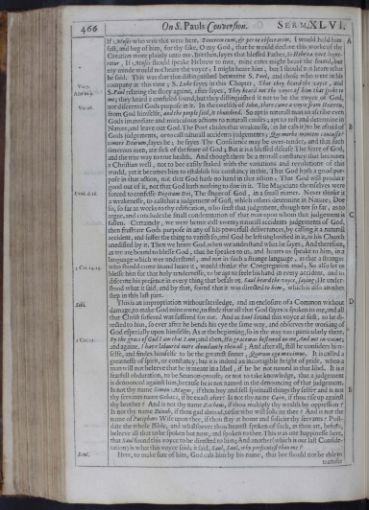 466
On S. Pauls Conversion.
Serm. XLVI.
If Moses who writ this were here, Tenerem eum, & per te obsecrarem, I would hold him
466
On S. Pauls Conversion.
Serm. XLVI.
If Moses who writ this were here, Tenerem eum, & per te obsecrarem, I would hold him
fast, and beg of him, for thy sake, O my God, that he would declare this worke of the
Creation more plainly unto me. But then, sayes that blessed Father, Si Hebræa voce loque-
retur, If Moses should speake Hebrew to mee, mine eares might heare the sound, but
my minde would not heare the voyce; I might heare him, but I should not heare what
he said. This was that that distinguished betweene S. Paul, and those who were in his
company at this time;Ver. 7. S. Luke sayes in this Chapter, That they heard the voyce, and
S. Paul relating the story againe, after sayes, Acts 22.9. They heard not the voyce of him that spoke to
me; they heard a confused sound, but they distinguished it not to be the voyce of God,
nor discerned Gods purpose in it.Ver. 28. In the twelfth of Iohn, there came a voyce from Heaven,
from God himselfe, and the people said, It thundred. So apt is naturall man to ascribe even
Gods immediate and miraculous actions to naturall causes; apt to rest and determine in
Nature, and leave out God. The Poet chides that weaknesse, (as he cals it) to be afraid of
Gods judgements, or to call naturall accidents judgements; Quo morbo mentem concusse?
timore Deorum, sayes he; he sayes The Conscience may be over-tender, and that such
timerous men, are sick of the feare of God; But it is a blessed disease The feare of God,
and the true way to true health. And though there be a morall constancy that becomes
a Christian well, not to bee easily shaked with the variations and revolutions of this
world, yet it becomes him to establish his constancy in this, That God hath a good pur-
pose in that action, not that God hath no hand in that action; That God will produce
good out of it, not that God hath nothing to doe in it. The Magicians themselves were
forced to confesse Digitum Dei, Exod. 6.16. The finger of God, in a small matter. Never thinke it
a weakenesse, to call that a judgement of God, which others determine in Nature; Doe
so, so far as works to thy edification, who seest that judgement, though not so far, as to
argue, and conclude the finall condemnation of that man upon whom that judgement is
fallen. Certainely, we were better call twenty naturall accidents judgements of God,
then frustrate Gods purpose in any of his powerfull deliverances, by calling it a naturall
accident, and suffer the thing to vanish so, and God be left unglorified in it, or his Church
unedified by it. Then we heare God, when we understand what he sayes; And therefore,
as we are bound to blesse God, that he speakes to us, and heares us speake to him, in a
language which wee understand, and not in such a strange language, as that a stranger
who should come in and heare it, 1 Cor. 14.23. would thinke the Congregation mad; So also let us
blesse him for that holy tendernesse, to be apt to feele his hand in every accident, and to
discerne his presence in every thing that befals us. Saul heard the voyce, saying; He under-
stood what it said, and by that, found that it was directed to him, which is also another
step in this last part. This is an impropriation without sacriledge, Sibi. and an enclosure of a Common without
damage, to make God mine owne, to finde that all that God sayes is spoken to me, and all
that Christ suffered was suffered for me. And as Saul found this voyce at first, to be di-
rected to him, so ever after he bends his eye the same way, and observes the working of
God especially upon himselfe; As at the beginning, so in the way too: particularly there,
By the grace of God I am that I am;1 Cor. 15. and then, His grace was bestowed on me, And not in vaine;
and againe, I have laboured more abundantly then all; And after all, still he considers him-
selfe, and findes himselfe to be the greatest sinner, Quorum ego maximus. It is called a
greatnesse of spirit, or constancy, but it is indeed an incorrigible height of pride, when a
man will not beleeve that he is meant in a libel, if he be not named in that libel. It is a
fearfull obduration, to be Sermon-proofe, or not to take knowledge, that a judgement
is denounced against him, because he is not named in the denouncing of that judgement.
Is not thy name Simon Magus, if thou buy and sell spirituall things thy selfe? and is not
thy servants name Gehazi, if he exact after? Is not thy name Cain, if thou rise up against
thy brother? And is not thy name Zacheus, if thou multiply thy wealth by oppression?
Is not thy name Dinah, if thou gad abroad, to see who will solicite thee? And is not the
name of Putiphars Wife upon thee, if thou stay at home and solicite thy servants? Post-
date the whole Bible, and whatsoever thou hearest spoken of such, as thou art, before,
beleeve all that to be spoken but now, and spoken to thee. This was one happinesse here,
that Saul found this voyce to be directed to him; And another (which is our last Conside-
ration) is what this voyce said; it said, Saul, Saul, why persecutest thou me? Here, Saul. to make sure of him, God cals him by his name, that hee should not be able to transfer
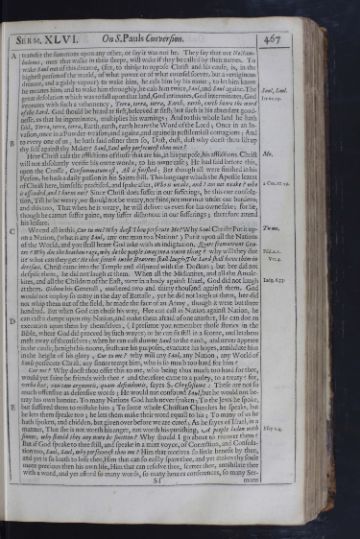 Serm. XLVI.
On S. Pauls Conversion.
467
transfer the summons upon any other, or say it was not he. They say that our Noctam-
Serm. XLVI.
On S. Pauls Conversion.
467
transfer the summons upon any other, or say it was not he. They say that our Noctam-bulones, men that walke in their sleepe, will wake if they be called by their names. To
wake Saul out of this dreame, (for, to thinke to oppose Christ and his cause, is, in the
highest person of the world, of what power or of what counsel soever, but a vertiginous
dreame, and a giddy vapour) to wake him, he cals him by his name, to let him know
he meanes him; and to wake him throughly, he cals him twice, Saul, and Saul againe.Saul, Saul. The
great desolation which was to fall upon that land, God intimates, God interminates, GodIer. 22.29.
intonates with such a vehemency, Terra, terra, terra, Earth, earth, earth heare the word
of the Lord. God should be heard at first, beleeved at first; but such is his abundant good-
nesse, as that he ingeminates, multiplies his warnings; And to this whole land he hath
said, Terra, terra, terra, Earth, earth, earth heare the Word of the Lord; Once in an In-
vasion, once in a Powder-treason; and againe, and againe in pestilentiall contagions; And
to every one of us, he hath said oftner then so, Dust, dust, dust why doest thou lift up
thy self against thy Maker? Saul, Saul why persecutest thou mee? Here Christ cals the afflictions of those that are his, in his purpose, his afflictions.Me. Christ
will not absolutely verifie his owne words, to his owne ease; He had said before this,
upon the Crosse, Consummatum est, All is finished; But though all were finished in his
Person, he hath a daily passion in his Saints still. This language which the Apostle learnt
of Christ here, himselfe practised, and spake after, 2 Cor. 11.29. Who is weake, and I am not weake? who
is offended, and I burne not? Since Christ does suffer in our sufferings, be this our consola-
tion, Till he be weary, we should not be weary, nor faint, nor murmur under our burdens;
and this too, That when he is weary, he will deliver us even for his owne sake; for he,
though he cannot suffer paine, may suffer dishonour in our sufferings; therefore attend
his leisure. We end all in this, Cur tu me? Why doest Thou persecute Me? Why Saul Christ?Tu me. Put it up-
on a Nation, (what is any Saul, any one man to a Nation?) Put it upon all the Nations
of the World, and you shall heare God aske with an indignation, Quare fremuerunt Gen-
tes? Why doe the heathen rage, why do the people imagine a vaine thing?Psal. 2.1. why will they doe
it? what can they get? Ver. 4. He that sitteth in the Heavens shall laugh; The Lord shall have them in
derision. Christ came into the Temple and disputed with the Doctors; but hee did not
despise them, he did not laugh at them. When all the Midianites, and all the Amale-
kites, and all the Children of the East, were in a body against Israel, Iudg. 6.33. God did not laugh
at them. Gideon his Generall, mustered two and thirty thousand against them. God
would not imploy so many in the day of Battaile, yet he did not laugh at them, hee did
not whip them out of the field, he made the face of an Army, though it were but three
hundred. But when God can chuse his way, Hee can call in Nation against Nation, he
can cast a dampe upon any Nation, and make them afraid of one another, He can doe an
execution upon them by themselves, (I presume you remember those stories in the
Bible, where God did proceed by such wayes) or he can sit still in a scorne, and let them
melt away of themselves; when he can cast downe Saul to the earth, and never appeare
in the cause, benight his noone, frustrate his purposes, evacuate his hopes, annihilate him
in the height of his glory, Cur tu me? why will any Saul, any Nation, any World of
Sauls persecute Christ, any sinner tempt him, who is so much too hard for him? Cur me? Why doest thou offer this to me, who being thus much too hard for thee,
would yet faine be friends with thee? and therefore came to a parley, to a treaty? for,
verba hæc, non tam arguentis, quam defendentis, sayes S. Chrysostome: These are not so
much offensive as defensive words; He would not confound Saul, but he would not be-
tray his own honour. To many Nations God hath never spoken; To the Jews he spoke,
but suffered them to mistake him; To some whole Christian Churches he speaks, but
he lets them speake too; he lets them make their word equall to his; To many of us he
hath spoken, and chidden, but given over before we are cured; As he sayes of Israel, in a
manner, That she is not worth his anger, not worth his punishing, Esay 1.4. A people laden with
sinnes, why should they any more be smitten? Why should I go about to recover them?
But if God speake to thee still, and speake in a mixt voyce, of Correction, and Consola-
tion too, Saul, Saul, why persecutest thou me? Him that receives so little benefit by thee,
and yet is so loath to lose thee, Him that can so easily spare thee, and yet makes thy soule
more precious then his own life, Him that can resolve thee, scatter thee, annihilate thee
with a word, and yet afford so many words, so many houres conferences, so many Ser-
Ss mons
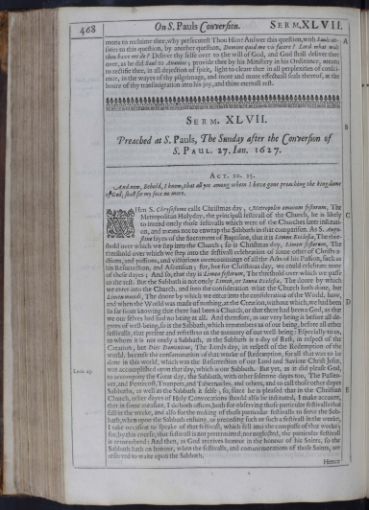 468
On S. Pauls Conversion.
Serm. XLVII.
mons to reclaime thee, why persecutest Thou Him? Answer this question, with Sauls an-
468
On S. Pauls Conversion.
Serm. XLVII.
mons to reclaime thee, why persecutest Thou Him? Answer this question, with Sauls an-swer to this question, by another question, Domine quid me vis facere? Lord what wilt
thou have me do? Deliver thy selfe over to the will of God, and God shall deliver thee
over, as he did Saul to Ananias; provide thee by his Ministery in his Ordinance, means
to rectifie thee, in all dejection of spirit, light to cleare thee in all perplexities of consci-
ence, in the wayes of thy pilgrimage, and more and more effectuall seals thereof, at the
houre of thy transmigration into his joy, and thine eternall rest.
Serm. XLVII.
Preached at S. Pauls, The Sunday after the Conversion of
S. Paul. 27. Ian. 1627.
Act. 20.25.
And now, Behold, I know, that all yee among whom I have gone preaching the kingdome
of God, shall see my face no more.
WHenWhen S. Chrysostome calls Christmas day, Metropolin omnium festorum, The
Metropolitan Holyday, the principall festivall of the Church, he is likely
to intend onely those festivalls which were of the Churches later instituti-
on, and means not to enwrap the Sabbath in that comparison. As S. Augu-
stine sayes of the Sacrament of Baptisme, that it is Limen Ecclesiæ, The thre-
shold over which we step into the Church; so is Christmas day, Limen festorum, The
threshold over which we step into the festivall celebration of some other of Christs a-
ctions, and passions, and victorious overcommings of all the Acts of his Passion, such as
his Resurrection, and Ascension; for, but for Christmas day, we could celebrate none
of these dayes; And so, that day is Limen festorum, The threshold over which we passe
to the rest. But the Sabbath is not onely Limen, or Ianua Ecclesiæ, The doore by which
we enter into the Church, and into the consideration what the Church hath done, but
Limen mundi, The doore by which we enter into the consideration of the World, how,
and when the World was made of nothing, at the Creation, without which, we had been
so far from knowing that there had been a Church, or that there had been a God, as that
we our selves had had no being at all. And therefore, as our very being is before all de-
grees of well-being, so is the Sabbath, which remembers us of our being, before all other
festivalls, that present and refresh to us the memory of our well-being: Especially to us,
to whom it is not onely a Sabbath, as the Sabbath is a day of Rest, in respect of the
Creation, but Dies Dominicus, The Lords day, in respect of the Redemption of the
world, because the consummation of that worke of Redemption, for all that was to be
done in this world, which was the Resurrection of our Lord and Saviour Christ Jesus,
was accomplished upon that day, Levit. 23. which is our Sabbath. But yet, as it did please God,
to accompany the Great day, the Sabbath, with other solemne dayes too, The Passeo-
ver, and Pentecost, Trumpets, and Tabernacles, and others, and to call those other dayes
Sabbaths, as well as the Sabbath it selfe; so, since he is pleased that in the Christian
Church, other dayes of Holy Convocations should also be instituted, I make account,
that in some measure, I do both offices, both for observing those particular festivalls that
fall in the weeke, and also for the making of those particular festivalls to serve the Sab-
bath, when upon the Sabbath ensuing, or preceding such or such a festivall in the weeke,
I take occasion to speake of that festivall, which fell into the compasse of that weeke;
for, by this course, that festivall is not pretermitted, nor neglected, the particular festivall
is remembred: And then, as God receives honour in the honour of his Saints, so the
Sabbath hath an honour, when the festivalls, and commemorations of those Saints, are
reserved to waite upon the Sabbath. Hence
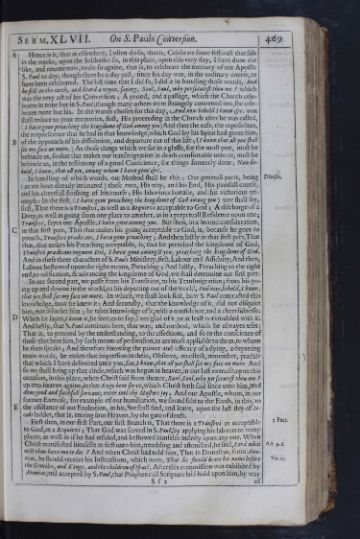 Serm. XLVII.
On S. Pauls Conversion.
469
Hence is it, that as elsewhere, I often do so, that is, Celebrate some festivall that fals
Serm. XLVII.
On S. Pauls Conversion.
469
Hence is it, that as elsewhere, I often do so, that is, Celebrate some festivall that fals
in the weeke, upon the Sabbath: so, in this place, upon this very day, I have done the
like, and returne now, to do so againe, that is, to celebrate the memory of our Apostle
S. Paul to day, though there be a day past, since his day was, in the ordinary course, to
have been celebrated. The last time that I did so, I did it in handling those words, And
he fell to the earth, and heard a voyce, saying, Saul, Saul, why persecutest thou me? which
was the very act of his Conversion; A period, and a passage, which the Church cele-
brates in none but in S. Paul; though many others were strangely converted too, she cele-
brates none but his. In the words chosen for this day, And now behold I know &c. wee
shall reduce to your memories, first, His proceeding in the Church after he was called,
(I have gone preaching the kingdome of God among you) And then the ease, the reposednes,
the acquiescence that he had in that knowledge, which God by his Spirit had given him,
of the approach of his dissolution, and departure out of this life; (I know that all you shall
see my face no more.) As those things which we see in a glasse, for the most part, must be
behinde us, so that that makes our transmigration in death comfortable unto us, must be
behinde us, in the testimony of a good Conscience, for things formerly done; Now be-
hold, I know, that all yee, among whom I have gone &c. In handling of which words, our Method shall be this; Our generall parts, Divisio. being
(as we have already intimated) these two, His way, and his End, His painfull course,
and his cheerfull finishing of his course; His laborious battaile, and his victorious tri-
umph: In the first, (I have gone preaching the kingdome of God among you) wee shall see,
first, That there is a Transivi, as well as a Requievi acceptable to God; A discharge of a
Duty, as well in going from one place to another, as in a perpetuall Residence upon one;
Transivi, sayes our Apostle, I have gone among you. But then, in a second consideration,
in that first part, That that makes his going acceptable to God, is, because he goes to
preach, Transivi prædicans, I have gone preaching; And then lastly in that first part, That
that, that makes his Preaching acceptable, is, that he preached the kingdome of God,
Transivi prædicans regnum Dei, I have gone amongst you, preaching the kingdome of God.
And in these three characters of S. Pauls Ministery, first, Labour and Assiduity; And then,
Labour bestowed upon the right means, Preaching; And lastly, Preaching to the right
end, to edification, & advancing the kingdome of God, we shall determine our first part. In our second part, we passe from his Transition, to his Transmigration; from his go-
ing up and downe in the world, to his departing out of the world, And now, behold, I know,
that yee shall see my face no more. In which, we shall look first, how S. Paul contracted this
knowledge, how he knew it; And secondly, that the knowledge of it, did not disquiet
him, not disorder him; he takes knowledge of it, with a confidence, and a cheerfulnesse.
When he sayes, I know it, he seemes to say, I am glad of it, or at least not troubled with it.
And lastly, that S. Paul continues here, that way, and method, which he alwayes uses;
That is, to proceed by the understanding, to the affections, and so to the conscience of
those that hear him, by such means of perswasion, as are most appliable to them, to whom
he then speaks; And therefore knowing the power and efficacy of a dying, a departing
mans words, he makes that impression in them, Observe, recollect, remember, practise
that which I have delivered unto you, for, I know, that all yee shall see my face no more. And
so we shall bring up that circle, which was begun in heaven, in our last exercise, upon this
occasion, in this place, when Christ said from thence, Saul, Saul, why persecutest thou me?
up into heaven againe, in that Euge bone serve, which Christ hath said since unto him, Well
done good and faithfull servant, enter into thy Masters joy; And our Apostle, whom, in our
former Exercise, for example of our humiliation, we found faln to the Earth, in this, to
the assistance of our Exaltation, in his, we shall find, and leave, upon the last step of Ia-
cobs ladder, that is, entring into Heaven, by the gate of death. First then, in our first Part, our first Branch is, 1 Part. That there is a Transivi as acceptable
to God, as a Requievi; That God was served in S. Paul, by applying his labours to many
places, as well as if he had resided, and bestowed himselfe intirely upon any one. When
Christ manifested himselfe at first unto him, trembling and astonished, he said, Act. 9.6. Lord what
wilt thou have me to doe? And when Christ had told him, That in Damascus, from Ana-
nias, he should receive his Instructions, which were, Ver. 15. That he should beare his name before
the Gentiles, and Kings, and the children of Israel, After this commission was exhibited by
Ananias, and accepted by S. Paul, that Propheticall Scripture laid hold upon him, by way Ss2 of
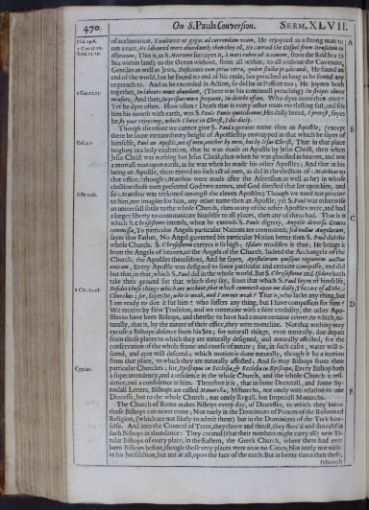 470
On S. Pauls Conversion.
Serm. XLVII.
of acclamation, Psal. 19.6. Exultavit ut gigas ad currendam viam, He rejoyced as a strong man to
470
On S. Pauls Conversion.
Serm. XLVII.
of acclamation, Psal. 19.6. Exultavit ut gigas ad currendam viam, He rejoyced as a strong man to
run a race, 1 Cor. 15.10. He laboured more abundantly then they all, He carried the Gospel from Ierusalem to
Illyricum, Rom. 15.19. That is, as S. Hierome survayes it, à mari rubro ad oceanum, from the Red Sea (a
Sea within land) to the Ocean without, from all within, to all without the Covenant,
Gentiles as well as Jews, Deficiente eum prius terra, quàm studio prædicandi, He found an
end of the world, but he found no end of his zeale, but preached as long as he found any
to preach to. And as he exceeded in Action, so did he in Passion too; He joynes both
together, 2 Cor. 11.23. In labours more abundant, (There was his continuall preaching) In stripes above
measure, And then, In prisons more frequent, In deaths often. Who dyes more then once?
Yet he dyes often. How often? Death that is every other mans everlasting fast, and fils
him his mouth with earth, was S. Pauls Panis quotidianus, His daily bread, I protest, sayes
he, by your rejoycing, which I have in Christ, I die daily. Though therefore we cannot give S. Paul a greater name then an Apostle, (except
there be some extraordinary height of Apostleship enwrapped in that which he sayes of
himselfe, Gal. 1.1. Paul an Apostle, not of men, neither by men, but by Iesus Christ, That in that place
he glory in a holy exultation, that he was made an Apostle by Jesus Christ, then when
Jesus Christ was nothing but Jesus Christ, then when he was glorified in heaven, and not
a mortall man upon earth, as he was when he made his other Apostles; And that in his
being an Apostle, there entred no such act of men, as did in the election of Matthias to
that office, (though Matthias were made after the Ascension as well as he) in whose
election those men presented God two names, and God directed that lot upon him, and
so Matthias was reckoned amongst the eleven Apostles) Acts 1. ult. Though we need not procure
to him, nor imagine for him, any other name then an Apostle, yet S. Paul was otherwise
an universall soule to the whole Church, then many of the other Apostles were, and had
a larger liberty to communicate himselfe to all places, then any of them had. That is it
which S. Chrysostome intends, when he extends S. Pauls dignity, Angelis diversæ Gentes
commissæ, To particular Angels particular Nations are committed; sed nullus Angelorum,
sayes that Father, No Angel governed his particular Nation better then S. Paul did the
whole Church. S. Chrysostome carryes it so high; Isidore modifies it thus; He brings it
from the Angels of heaven, to the Angels of the Church, Indeed the Archangels of the
Church, the Apostles themselves, And he sayes, Apostolorum quisque regionem nactus
unicam, Every Apostle was designed to some particular and certaine compasse, and did
but that, in that, which S. Paul did in the whole world. But S. Chrysostome and Isidore both
take their ground for that which they say, from that which S. Paul sayes of himselfe,
2 Cor. 11.28. Besides these things which are without, that which commeth upon me daily, The care of all the
Churches; for, sayes he, who is weak, and I am not weak? That is, who lacks any thing, but
I am ready to doe it for him? who suffers any thing, but I have compassion for him?
We receive by faire Tradition, and we entertaine with a faire credulity, the other Apo-
stles to have been Bishops, and thereby to have had a more certaine center, to which, na-
turally, that is, by the nature of their office, they were to encline. Not that nothing may
excuse a Bishops absence from his Sea; for naturall things, even naturally, doe depart
from those places to which they are naturally designed, and naturally affected, for the
conservation of the whole frame and course of nature; for, in such cases, water will a-
scend, and ayre will descend; which motion is done naturally, though it be a motion
from that place, to which they are naturally affected; And so may Bishops from their
particular Churches;Cyprian. for, Episcopus in Ecclesia, & Ecclesia in Episcopo, Every Bishop hath
a superintendency, and a residence in the whole Church, and the whole Church a resi-
dence, and a confidence in him. Therefore it is, that in some Decretall, and some Sy-
nodall Letters, Bishops are called Monarchæ, Monarchs, not onely with relation to one
Diocesse, but to the whole Church; not onely Regall, but Imperiall Monarchs. The Church of Rome makes Bishops every day, of Diocesses, to which they know
those Bishops can never come; Not onely in the Dominions of Princes of the Reformed
Religion, (which are not likely to admit them) but in the Dominions of the Turk him-
selfe. And into the Councel of Trent, they threw and thrust, they shov'd and shoveld in
such Bishops in abundance: They created (that their numbers might carry all) new Ti-
tular Bishops of every place, in the Eastern, the Greek Church, where there had ever
been Bishops before, though those very places were now no Cities; Not onely not with-
in his Jurisdiction, but not at all, upon the face of the earth. But in better times then these, (though
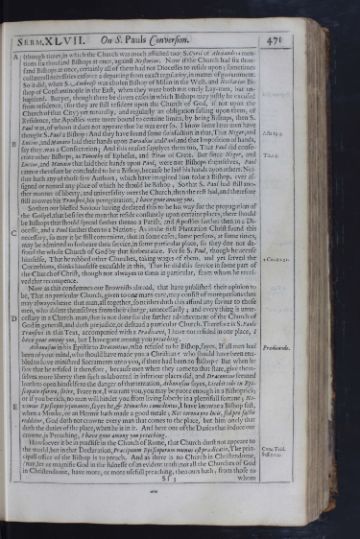 Serm. XLVII.
On S. Pauls Conversion.
471
(though times, in which the Church was much afflicted too) S. Cyril of Alexandria men-
Serm. XLVII.
On S. Pauls Conversion.
471
(though times, in which the Church was much afflicted too) S. Cyril of Alexandria men-tions six thousand Bishops at once, against Nestorius. Now if the Church had six thou-
sand Bishops at once, certainly all of them had not Diocesses to reside upon; sometimes
collaterall necessities enforce a departing from exact regularity, in matter of government.
So it did, when S. Ambrose was chosen Bishop of Milan in the West, and Nectarius Bi-
shop of Constantinople in the East, when they were both not onely Lay-men, but un-
baptized. But yet, though there be divers cases in which Bishops may justly be excused
from residence, (for they are still resident upon the Church of God, if not upon the
Church of that City) yet naturally, and regularly an obligation falling upon them, of
Residence, the Apostles were more bound to certaine limits, by being Bishops, then S.
Paul was, of whom it does not appeare that he was ever so. I know some later men have
thought S. Paul a Bishop: And they have found some satisfaction in that, That Niger, Acts 13.3. and
Lucius, and Manaen laid their hands upon Barnabas and Paul; and that Imposition of hands,
say they, was a Consecration; And this reason supplyes them too, That Paul did conse-
crate other Bishops, as Timothy of Ephesus, and Titus of Crete. But since Niger, Tit. 1.5. and
Lucius, and Manaen that laid their hands upon Paul, were not Bishops themselves, Paul
cannot therefore be concluded to be a Bishop, because he laid his hands upon others. Nei-
ther hath any of those few Authors, which have imagined him to be a Bishop, ever as-
signed or named any place of which he should be Bishop; So that S. Paul had still ano-
ther manner of liberty, and universality over the Church, then the rest had, and therefore
still avowes his Transivi, his peregrination, I have gone among you. So then our blessed Saviour having declared this to be his way for the propagation of
the Gospel, that besides the men that reside constantly upon certaine places, there should
be Bishops that should spread farther then to a Parish, and Apostles farther then to a Di-
ocesse, and a Paul farther then to a Nation; As in the first Plantation Christ found this
necessary, so may it be still convenient, that in some cases, some persons, at some times,
may be admitted to forbeare their service, in some particular place, so they doe not de-
fraud the whole Church of God by that forbearance. For so S. Paul, though he accuse
himselfe, That he robbed other Churches, taking wages of them, 2 Cor. 11.11. and yet served the
Corinthians, thinks himselfe excusable in this, That he did this service in some part of
the Church of Christ, though not alwayes to them in particular, from whom he recei-
ved that recompence. Now as this condemnes our Brownists abroad, that have published their opinion to
be, That no particular Church, given to one mans cure, may consist of more persons then
may alwayes heare that man, all together, so neither doth this afford any favour to those
men, who absent themselves from their charge, unnecessarily; and every thing is unne-
cessary in a Church-man, that is not done for the farther advancement of the Church of
God in generall, and doth prejudice, or defraud a particular Church. Therefore is S. Pauls
Transivi in this Text, accompanied with a Prædicavi, I have not resided in one place, I
have gone among you, but I have gone among you preaching. Athanasius in his Epistle to Dracontius, who refused to be Bishop, sayes, Prædicando. If all men had
been of your mind, who should have made you a Christian? who should have been ena-
bled to have ministred Sacraments unto you, if there had been no Bishop? But when he
saw that he refused it therefore, because men when they come to that state, give them-
selves more liberty then such as laboured in inferiour places did, and Dracontius seemed
loath to open himselfe to the danger of that tentation, Athanasius sayes, Licebit tibi in Epi-
scopatu esurire, sitire, Feare not, I warrant you, you may be poore enough in a Bishoprick;
or if you be rich, no man will hinder you from living soberly in a plentifull fortune; No-
vimus Episcopos jejunantes, sayes he, & Monachos comedentes, I have knowne a Bishop fast,
when a Monke, or an Hermit hath made a good meale; Nec corona pro locis, sed pro factis
redditur, God doth not crowne every man that comes to the place, but him onely that
doth the duties of the place, when he is in it. And here one of the Duties that induce our
crowne, is Preaching, I have gone among you preaching. Howsoever it be in practise in the Church of Rome, that Church durst not appeare to
the world, but in that Declaration, Præcipuum Episcoporum munus est prædicatio, Conc. Trid.
Sess. 5. c.2. The prin-
cipall office of the Bishop is to preach. And as there is no Church in Christendome,
(nay, let us magnifie God in the fulnesse of an evident truth) not all the Churches of God
in Christendome, have more, or more usefull preaching, then ours hath, from those to Ss3 whom
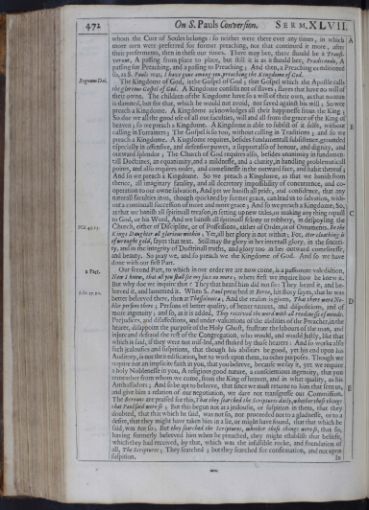 472
On S. Pauls Conversion.
Serm. XLVII.
whom the Cure of Soules belongs: so neither were there ever any times, in which
472
On S. Pauls Conversion.
Serm. XLVII.
whom the Cure of Soules belongs: so neither were there ever any times, in which
more men were preferred for former preaching, nor that continued it more, after
their preferments, then in these our times. There may bee, there should be a Transi-
verunt, A passing from place to place, but still it is as it should bee, Prædicando, A
passing for Preaching, and a passing to Preaching; And then, a Preaching conditioned
so, as S. Pauls was, I have gone among you, preaching the Kingdome of God. The Kingdome of God, Regnum Dei. is the Gospel of God; that Gospel which the Apostle calls
the glorious Gospel of God. A Kingdome consists not of slaves; slaves that have no will of
their owne. The children of the Kingdome have so a will of their own, as that no man
is damned, but for that, which he would not avoid, nor saved against his will; So wee
preach a Kingdome. A Kingdome acknowledges all their happinesse from the King;
So doe we all the good use of all our faculties, will and all from the grace of the King of
heaven; so we preach a Kingdome. A Kingdome is able to subsist of it selfe, without
calling in Forrainers; The Gospel is so too, without calling in Traditions; and so we
preach a Kingdome. A Kingdome requires, besides fundamentall subsistence, grounded
especially in offensive, and defensive power, a support also of honour, and dignity, and
outward splendor; The Church of God requires also, besides unanimity in fundamen-
tall Doctrines, an equanimity, and a mildnesse, and a charity, in handling problematicall
points, and also requires order, and comelinesse in the outward face, and habit thereof;
And so we preach a Kingdome. So we preach a Kingdome, as that we banish from
thence, all imaginary fatality, and all decretory impossibility of concurrence, and co-
operation to our owne salvation, And yet we banish all pride, and confidence, that any
naturall faculties in us, though quickned by former grace, can lead us to salvation, with-
out a continuall succession of more and more grace; And so we preach a Kingdome; So,
as that we banish all spirituall treason, in setting up new titles, or making any thing equall
to God, or his Word, And we banish all spirituall felony or robbery, in despoyling the
Church, Psal. 45.13. either of Discipline, or of Possessions, either of Order, or of Ornaments. Be the
Kings Daughter all glorious within; Yet, all her glory is not within; For, Her cloathing is
of wrought gold, sayes that text. Still may she glory in her internall glory, in the sinceri-
ty, and in the integrity of Doctrinall truths, and glory too in her outward comelinesse,
and beauty. So pray we, and so preach we the Kingdome of God. And so we have
done with our first Part. Our second Part, 2 Part. to which in our order we are now come, is a passionate valediction,
Now I know, that all you shall see my face no more; where first we inquire how he knew it.
But why doe we inquire that? They that heard him did not so: They heard it, and be-
leeved it, Acts 17.10. and lamented it. When S. Paul preached at Berea, his story sayes, that he was
better beleeved there, then at Thessalonica; And the reason is given, That there were No-
bler persons there; Persons of better quality, of better natures, and dispositions, and of
more ingenuity; and so, as it is added, They received the word with all readinesse of minde.
Prejudices, and disaffections, and under-valuations of the abilities of the Preacher, in the
hearer, disappoint the purpose of the Holy Ghost, frustrate the labours of the man, and
injure and defraud the rest of the Congregation, who would, and would justly, like that
which is said, if they were not mis-led, and shaked by those hearers: And so worke also
such jealousies and suspitions, that though his abilities be good, yet his end upon his
Auditory, is not their edification, but to work upon them, to other purposes. Though we
require not an implicite faith in you, that you beleeve, because we say it, yet we require
a holy Noblenesse in you, A religious good nature, a conscientious ingenuity, that you
remember from whom we come, from the King of heaven, and in what quality, as his
Ambassadors; And so be apt to beleeve, that since we must returne to him that sent us,
and give him a relation of our negotiation, we dare not transgresse our Commission.
The Bereans are praised for this, That they searched the Scriptures daily, whether those things
that Paul said were so; But this begun not at a jealousie, or suspition in them, that they
doubted, that that which he said, was not so, nor proceeded not to a gladnesse, or to a
desire, that they might have taken him in a lie, or might have found, that that which he
said, was not so; But they searched the Scriptures, whether those things were so, that so,
having formerly beleeved him when he preached, they might establish that beliefe,
which they had received, by that, which was the infallible rocke, and foundation of
all, The Scriptures; They searched; but they searched for confirmation, and not upon
suspition. In
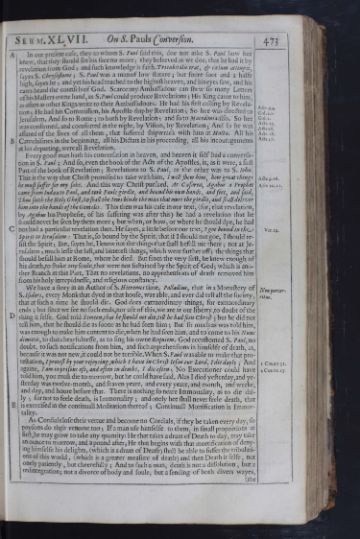 Serm. XLVII.
On S. Pauls Conversion.
473
In our present case, they to whom S. Paul said this, doe not aske S. Paul how hee
Serm. XLVII.
On S. Pauls Conversion.
473
In our present case, they to whom S. Paul said this, doe not aske S. Paul how hee
knew, that they should see his face no more; they beleeved as we doe, that he had it by
revelation from God; and such knowledge is faith. Tricubitalis er at, & cœlum attingit,
sayes S. Chrysostome; S. Paul was a man of low stature; but foure foot and a halfe
high, sayes he; and yet his head reached to the highest heaven, and his eyes saw, and his
eares heard the counsels of God. Scarce any Ambassadour can shew so many Letters
of his Masters owne hand, as S. Paul could produce Revelations; His King came to him,
as often as other Kings write to their Ambassadours.Acts 9.4.
Gal. 1.1.
Gal. 2.
Acts 13.
Acts 16.
Acts 18.
Acts 17. He had his first calling by Revela-
tion; He had his Commission, his Apostle-ship by Revelation; So hee was directed to
Jerusalem, And so to Rome; to both by Revelation; and so to Macedonia also. So hee
was confirmed, and comforted in the night, by Vision, by Revelation; And so he was
assured of the lives of all them, that suffered shipwrack with him at Malta. All his
Catechismes in the beginning, all his Dictats in his proceeding, all his incouragements
at his departing, were all Revelation. Every good man hath his conversation in heaven, and heaven it self had a conversa-
tion in S. Paul; And so, even the book of the Acts of the Apostles, is, as it were, a first
Part of the book of Revelation; Revelations to S. Paul, as the other was to S. Iohn.
This is the way that Christ promised to take with him, Acts 9.16. I will shew him, how great things
he must suffer for my sake. And this way Christ pursued, Acts 20.11.21.11 At Cæsarea, Agabus a Prophet
came from Iudæa to Paul, and took Pauls girdle, and bound his own hands, and feet, and said,
Thus saith the Holy Ghost, So shall the Iews binde the man that owes the girdle, and shall deliver
him into the hands of the Gentiles. This then was his case in our text, (for, that revelation,
by Agabus his Prophesie, of his suffering was after this) he had a revelation that he
should never be seen by them more; but when, or how, or where he should dye, he had
not had a particular revelation then. He sayes, a little before our text, Ver. 12. I goe bound in the
Spirit to Ierusalem: That is, so bound by the Spirit, that if I should not goe, I should re-
sist the Spirit; But, sayes he, I know not the things that shall befall me there; not at Je-
rusalem; much lesse the last, and bitterest things, which were farther off; the things that
should befall him at Rome, where he died. But from the very first, he knew enough of
his death, to shake any soule, that were not sustained by the Spirit of God; which is ano-
ther Branch in this Part, That no revelations, no apprehensions of death removed him
from his holy intrepidnesse, and religious constancy. We have a story in an Author of S. Hieromes time, Palladius, Non perter-
ritus. that in a Monastery of
S. Isidors, every Monk that dyed in that house, was able, and ever did tell all the society,
that at such a time he should die. God does extraordinary things, for extraordinary
ends; but since we see no such ends, nor use of this, we are at our liberty, to doubt of the
thing it selfe. God told Simeon, that he should not die, till he had seen Christ; but he did not
tell him, that he should die as soone as he had seen him; But so much as was told him,
was enough to make him content to die, when he had seen him, and to come to his Nunc
dimittis, to that chearfulnesse, as to sing his owne Requiem. God accustomed S. Paul, no
doubt, to such notifications from him, and such apprehensions in himselfe of death, as,
because it was not new, it could not be terrible. When S. Paul was able to make that pro-
testation, I protest by your rejoycing, which I have in Christ Iesus our Lord, I die dayly;1 Cor. 15.31. And
againe, 2 Cor. 11.23. I am in prisons oft, and often in deaths, I die often; No Executioner could have
told him, you must die to morrow, but he could have said, Alas I died yesterday, and ye-
sterday was twelve-month, and seaven yeare, and every yeare, and month, and weeke,
and day, and houre before that. There is nothing so neare Immortality, as to die dai-
ly; for not to feele death, is Immortality; and onely hee shall never feele death, that
is exercised in the continuall Meditation thereof; Continuall Mortification is Immor-
tality. As Cordials lose their vertue and become no Cordials, if they be taken every day, so
poysons do their venome too; If a man use himselfe to them, in small proportions at
first, he may grow to take any quantity: He that takes a dram of Death to day, may take
an ounce to morrow, and a pound after; He that begins with that mortification of deny-
ing himselfe his delights, (which is a dram of Death) shall be able to suffer the tribulati-
ons of this world, (which is a greater measure of death) and then Death it selfe, not
onely patiently, but cheerefully; And to such a man, death is not a dissolution, but a
redintegration; not a divorce of body and soule, but a sending of both divers wayes, (the
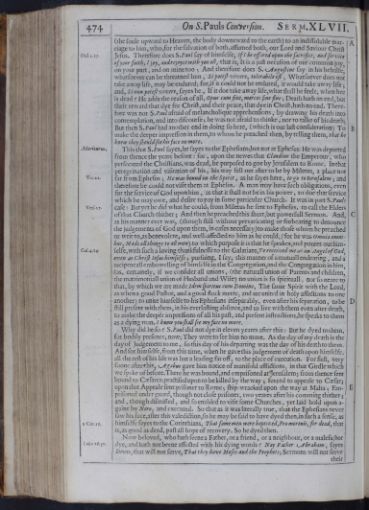 474
On S. Pauls Conversion.
Serm. XLVII.
(the soule upward to Heaven, the body downeward to the earth) to an indissoluble mar-
474
On S. Pauls Conversion.
Serm. XLVII.
(the soule upward to Heaven, the body downeward to the earth) to an indissoluble mar-riage to him, who, for the salvation of both, assumed both, our Lord and Saviour Christ
Jesus.Phil. 2.17. Therefore does S. Paul say of himselfe, If I be offered upon the sacrifice, and service
of your faith, I joy, and rejoyce with you all, that is, It is a just occasion of our common joy,
on your part, and on mine too; And therefore does S. Augustine say in his behalfe,
whatsoever can be threatned him, Si potest vivere, tolerabile est, Whatsoever does not
take away life, may be endured; for, if it could not be endured, it would take away life;
and, Si non potest vivere, sayes he, If it doe take away life, what shall he feele, when hee
is dead? He adds the reason of all, Opus cum fine, merces sine fine; Death hath an end, but
their reward that dye for Christ, and their peace, that dye in Christ, hath no end. There-
fore was not S. Paul afraid of melancholique apprehensions, by drawing his death into
contemplation, and into discourse; he was not afraid to thinke, nor to talke of his death;
But then S. Paul had another end in doing so here, (which is our last consideration) To
make the deeper impression in them, to whom he preached then, by telling them, that he
knew they should see his face no more. This that S. Paul sayes, Moriturus. he sayes to the Ephesians; but not at Ephesus: He was departed
from thence the yeare before: for, upon the newes that Claudius the Emperour, who
persecuted the Christians, was dead, he purposed to goe by Jerusalem to Rome. In that
peregrination and visitation of his, his way fell out after to be by Miletus, a place not
far from Ephesus;Ver. 22. He was bound in the Spirit, as he sayes here, to go to Ierusalem; and
therefore he could not visit them at Ephesus. A man may have such obligations, even
for the service of God upon him, as that it shall not be in his power, to doe that service
which he may owe, and desire to pay in some particular Church. It was in part S. Pauls
case:Vers. 17. But yet he did what he could; from Miletus he sent to Ephesus, to call the Elders
of that Church thither; And then he preached this short, but powerfull Sermon. And,
as his manner ever was, (though still without prevaricating or forbearing to denounce
the judgements of God upon them, in cases necessary) to make those whom he preached
or writ to, as benevolent, and well-affected to him as he could, (for he was Omnia omni-
bus, Made all things to all men) to which purpose it is that he speakes, and poures out him-
selfe, Gal. 4.14. with such a loving thankfulnesse to the Galatians, Ye received me as an Angel of God,
even as Christ Iesus himselfe; pursuing, I say, this manner of a mutuall endearing, and a
reciprocall embowelling of himselfe in the Congregation, and the Congregation in him,
(as, certainely, if we consider all unions, (the naturall union of Parents and children,
the matrimoniall union of Husband and Wife) no union is so spirituall, nor so neare to
that, by which we are made Idem spiritus cum Domino, The same Spirit with the Lord,
as when a good Pastor, and a good flock meete, and are united in holy affections to one
another) to unite himselfe to his Ephesians inseparably, even after his separation, to be
still present with them, in his everlasting absence, and to live with them even after death,
to make the deeper impressions of all his past, and present instructions, he speaks to them
as a dying man, I know you shall see my face no more. Why did he so? S. Paul did not dye in eleven yeares after this: But he dyed to them,
for bodily presence, now; They were to see him no more. As the day of my death is the
day of Judgement to me, so this day of his departing was the day of his death to them.
And for himselfe, from this time, when he gave this judgement of death upon himselfe,
all the rest of his life was but a leading far off, to the place of execution. For first, very
soone after this, Agabus gave him notice of manifold afflictions, in that Girdle which
we spake of before. There he was bound, and emprisoned at Jerusalem; from thence sent
bound to Cæsarea; practised upon to be killed by the way; forced to appeale to Cæsar;
upon that Appeale sent prisoner to Rome; ship-wracked upon the way at Malta; Em-
prisoned under guard, though not close prisoner, two yeares after his comming thither;
and, though dismissed, and so enabled to visit some Churches, yet laid hold upon a-
gaine by Nero, and executed. So that as it was literally true, that the Ephesians never
saw his face, after this valediction, so he may be said to have dyed then, in such a sense, as
himselfe sayes to the Corinthians, 1 Cor. 15. That some men were baptized, Pro mortuis, for dead, that
is, as good as dead, past all hope of recovery. So he dyed then. Now beloved, who hath seene a Father, or a friend, or a neighbour, or a malefactor
dye, Luke 16.30. and hath not beene affected with his dying words? Nay Father Abraham, sayes
Dives, that will not serve, That they have Moses and the Prophets; Sermons will not serve their
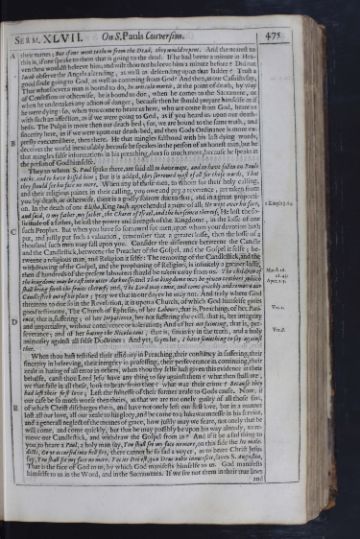 Serm. XLVII.
On S. Pauls Conversion.
475
their turnes; But if one went to them from the Dead, they would repent. And the nearest to
Serm. XLVII.
On S. Pauls Conversion.
475
their turnes; But if one went to them from the Dead, they would repent. And the nearest to
this is, if one speake to them that is going to the dead. If he had beene a minute in Hea-
ven thou wouldst beleeve him; and wilt thou not beleeve him a minute before? Did not
Iacob observe the Angels ascending, as well as descending upon that ladder? Trust a
good soule going to God, as well as comming from God? And then, as our Casuists say,
That whatsoever a man is bound to do, In articulo mortis, at the point of death, by way
of Confession or otherwise, he is bound to doe, when he comes to the Sacrament, or
when he undertakes any action of danger, because then he should prepare himselfe as if
he were dying: so, when you come to heare us here, who are come from God, heare us
with such an affection, as if we were going to God, as if you heard us upon our death-
beds. The Pulpit is more then our death-bed; for, we are bound to the same truth, and
sincerity here, as if we were upon our death-bed, and then Gods Ordinance is more ex-
presly executed here, then there. He that mingles falshood with his last dying words,
deceives the world inexcusably, because he speakes in the person of an honest man, but he
that mingles false informations in his preaching, does so much more, because he speaks in
the person of God himselfe. They to whom S. Paul spake there, are said all to have wept, and to have fallen on Pauls
necke, and to have kissed him; But it is added, they sorrowed most of all for those words, That
they should see his face no more. When any of those men, to whom for their holy calling,
and their religious paines in their calling, you owe and pay a reverence, are taken from
you by death, or otherwise, there is a godly sorrow due to that, and in a great proporti-
on. In the death of one Elisha, King Ioash apprehended a ruine of all; 2 King. 13.14. He wept over his face,
and said, O my father, my father, the Charet of Israel, and the horsemen thereof; He lost the so-
licitude of a father, he lost the power and strength of the Kingdome, in the losse of one
such Prophet. But when you have so sorrowed for men, upon whom your devotion hath
put, and justly put such a valuation, remember that a greater losse, then the losse of a
thousand such men may fall upon you. Consider the difference betweene the Candle
and the Candlestick, betweene the Preacher of the Gospel, and the Gospel it selfe; be-
tweene a religious man, and Religion it selfe: The removing of the Candlestick, and the
withdrawing of the Gospel, and the prophaning of Religion, is infinitely a greaten losse,
then if hundreds of the present labourers should be taken away from us.Mat. 8.12.
21.43.
Apoc. 2.5. The children of
the kingdome may be cast into utter darknesse; and That kingdome may be given to others which
shall bring forth the fruits thereof; and, The Lord may come, and come quickly and remove our
Candlestick out of his place; pray we that in our dayes he may not. And truly where God
threatens to doe so in the Revelation, it is upon a Church, of which God himselfe gives
good testimony, The Church of Ephesus; of her Labours, that is, Preaching;Ver. 2. of her Pati-
ence, that is, suffering; of her Impatience, her not suffering the evill, that is, her integrity
and impartiality, without connivence or toleration; And of her not fainting, that is, per-
severance; and of her hating the Nicolaitans, that is, sincerity in the truth, Ver. 6. and a holy
animosity against all false Doctrines: And yet, sayes he, I have something to say against
thee. When thou hast testified their assiduity in Preaching, their constancy in suffering, their
sincerity in beleeving, their integrity in professing, their perseverance in continuing, their
zeale in hating of all error in others, when thou thy selfe hast given this evidence in their
behalfe, canst thou Lord Jesu have any thing to say against them? what then shall we,
we that faile in all these, look to heare from thee? what was their crime? Because they
had left their first love; Left the fulnesse of their former zeale to Gods cause. Now, if
our case be so much worse then theirs, as that we are not onely guilty of all those sins,
of which Christ discharges them, and have not onely left our first love, but in a manner
lost all our love, all our zeale to his glory, and be come to a lukewarmnesse in his service,
and a generall neglect of the meanes of grace, how justly may we feare, not onely that he
will come, and come quickly, but that he may possibly be upon his way already, to re-
move our Candlestick, and withdraw the Gospel from us? And if it be a sad thing to
you, to heare a Paul, a holy man say, You shall see my face no more, on this side the Ite male-
dicti, Go ye accursed into hell fire, there cannot be so sad a voyce, as to heare Christ Jesus
say, You shall see my face no more. Facies Dei est, qua Deus nobis innotescit, sayes S. Augustin,
That is the face of God to us, by which God manifests himselfe to us. God manifests
himselfe to us in the Word, and in the Sacraments. If we see not them in their true lines and
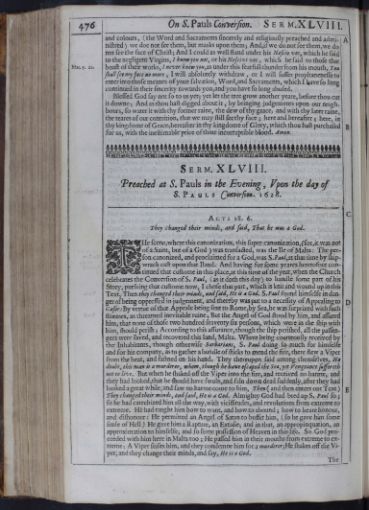 476
On S. Pauls Conversion.
Serm. XLVIII.
and colours, (the Word and Sacraments sincerely and religiously preached and admi-
476
On S. Pauls Conversion.
Serm. XLVIII.
and colours, (the Word and Sacraments sincerely and religiously preached and admi-nistred) we doe not see them, but masks upon them; And, if we do not see them, we do
not see the face of Christ; And I could as well stand under his Nescio vos, which he said
to the negligent Virgins, I know you not, or his Nescivi vos, which he said to those that
boast of their works, Mat. 7.22. I never knew you, as under this fearfull thunder from his mouth, You
shall see my face no more, I will absolutely withdraw, or I will suffer prophanenesse to
enter into those meanes of your salvation, Word, and Sacraments, which I have so long
continued in their sincerity towards you, and you have so long abused. Blessed God say not so to us yet; yet let the tree grow another yeare, before thou cut
it downe; And as thou hast digged about it, by bringing judgements upon our neigh-
bours, so water it with thy former raine, the dew of thy grace, and with thy later raine,
the teares of our contrition, that we may still see thy face; here and hereafter; here, in
thy kingdome of Grace; hereafter in thy kingdome of Glory, which thou hast purchased
for us, with the inestimable price of thine incorruptible blood. Amen.
Serm. XLVIII.
Preached at S. Pauls in the Evening, Vpon the day of
S. Pauls Conversion. 1628.
Acts 28.6.
They changed their minds, and said, That he was a God.
THeThe scene, where this canonization, this super-canonization, (for, it was not
of a Saint, but of a God) was transacted, was the Ile of Malta: The per-
son canonized, and proclaimed for a God, was S. Paul, at that time by ship-
wrack cast upon that Iland. And having for some yeares heretofore con-
tinued that custome in this place, at this time of the year, when the Church
celebrates the Conversion of S. Paul, (as it doth this day) to handle some part of his
Story, pursuing that custome now, I chose that part, which is knit and wound up in this
Text, Then they changed their minds, and said, He is a God. S. Paul found himselfe in dan-
ger of being oppressed in judgement, and thereby was put to a necessity of Appealing to
Cæsar: By vertue of that Appeale being sent to Rome, by Sea, he was surprized with such
stormes, as threatned inevitable ruine; But the Angel of God stood by him, and assured
him, that none of those two hundred seaventy six persons, which were in the ship with
him, should perish; According to this assurance, though the ship perished, all the passen-
gers were saved, and recovered this land, Malta. Where being courteously received by
the Inhabitants, though otherwise Barbarians, S. Paul doing so much for himselfe
and for his company, as to gather a bundle of sticks to mend the fire, there flew a Viper
from the heat, and fastned on his hand. They thereupon said among themselves, No
doubt, this man is a murderer, whom, though he have escaped the Sea, yet Vengeance suffereth
not to live. But when he shaked off the Viper into the fire, and received no harme, and
they had looked, that he should have swoln, and faln down dead suddenly, after they had
looked a great while, and saw no harme come to him, Then (and then enters our Text)
They changed their minds, and said, He is a God. Almighty God had bred up S. Paul so;
so he had catechized him all the way, with vicissitudes, and revolutions from extreme to
extreme. He had taught him how to want, and how to abound; how to beare honour,
and dishonour: He permitted an Angel of Satan to buffet him, (so he gave him some
sense of Hell) He gave him a Rapture, an Extasie; and in that, an appropinquation, an
approximation to himselfe, and so some possession of Heaven in this life. So God pro-
ceeded with him here in Malta too; He passed him in their mouths from extreme to ex-
treme; A Viper seises him, and they condemne him for a murderer; He shakes off the Vi-
per; and they change their minds, and say, He is a God. The
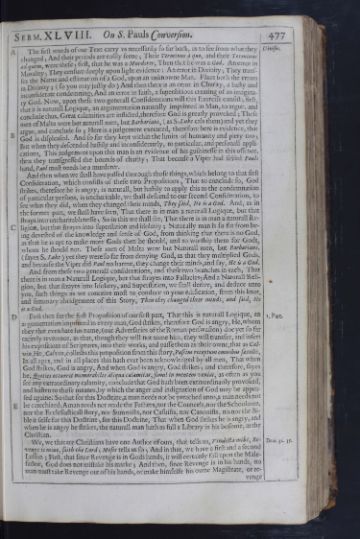 Serm. XLVIII.
On S. Pauls Conversion.
477
The first words of our Text carry us necessarily so far back, Divisio. as to see from what they
Serm. XLVIII.
On S. Pauls Conversion.
477
The first words of our Text carry us necessarily so far back, Divisio. as to see from what they
changed; And their periods are easily seene; Their Terminus à quo, and their Terminus
ad quem, were these; first, that he was a Murderer, Then that he was a God. An error in
Morality; They censure deeply upon light evidence: An error in Divinity; They trans-
fer the Name and estimation of a God, upon an unknowne Man. Place both the errors
in Divinity; (so you may justly do) And then there is an error in Charity, a hasty and
inconsiderate condemning; And an error in faith, a superstitious creating of an imagina-
ry God. Now, upon these two generall Considerations will this Exercise consist; first,
that it is naturall Logique, an argumentation naturally imprinted in Man, to argue, and
conclude thus, Great calamities are inflicted, therefore God is greatly provoked; These
men of Malta were but naturall men, but Barbarians, (as S. Luke cals them) and yet they
argue, and conclude so; Here is a judgement executed, therefore here is evidence, that
God is displeased. And so far they kept within the limits of humanity and piety too;
But when they descended hastily and inconsiderately, to particular, and personall appli-
cations, This judgement upon this man is an evidence of his guiltinesse in this offence,
then they transgressed the bounds of charity; That because a Viper had seised Pauls
hand, Paul must needs be a murderer. And then when we shall have passed thorough those things, which belong to that first
Consideration, which consists of these two Propositions, That to conclude so, God
strikes, therefore he is angry, is naturall, but hastily to apply this to the condemnation
of particular persons, is uncharitable, we shall descend to our second Consideration, to
see what they did, when they changed their minds, They said, He is a God. And, as in
the former part, we shall have seen, That there is in man a naturall Logique, but that
strays into uncharitablenesse; So in this we shall see, That there is in man a naturall Re-
ligion, but that strayes into superstition and idolatry; Naturally man is so far from be-
ing devested of the knowledge and sense of God, from thinking that there is no God,
as that he is apt to make more Gods then he should, and to worship them for Gods,
whom he should not. These men of Malta were but Naturall men, but Barbarians,
(sayes S. Luke) yet they were so far from denying God, as that they multiplied Gods,
and because the Viper did Paul no harme, they change their minds, and say, He is a God. And from these two generall considerations, and these two branches in each, That
there is in man a Naturall Logique, but that strayes into Fallacies; And a Naturall Reli-
gion, but that strayes into Idolatry, and Superstition, we shall derive, and deduce unto
you, such things as we conceive most to conduce to your edification, from this knot,
and summary abridgement of this Story, Then they changed their minds, and said, He
is a God. First then for the first Proposition of our first part, That this is naturall Logique, 1. Part. an
argumentation imprinted in every man, God strikes, therefore God is angry, He, whom
they that even hate his name, (our Adversaries of the Roman perswasion) doe yet so far
tacitely reverence, as that, though they will not name him, they will transfer, and insert
his expositions of Scriptures, into their works, and passe them as their owne, that as Cal-
vin, He, Calvin, collects this proposition from this story, Passim receptum omnibus sæculis,
In all ages, and in all places this hath ever been acknowledged by all men, That when
God strikes, God is angry, And when God is angry, God strikes; and therefore, sayes
he, Quoties occurrit memorabilis aliqua calamitas, simul in mentem veniat, as often as you
see any extraordinary calamity, conclude that God hath been extraordinarily provoked,
and hasten to those meanes, by which the anger and indignation of God may be appea-
sed againe. So that for this Doctrine, a man needs not be preached unto, a man needs not
be catechized; A man needs not reade the Fathers, nor the Councels, nor the Schoolmen,
nor the Ecclesiasticall story, nor Summists, nor Casuists, nor Canonists, no nor the Bi-
ble it selfe for this Doctrine; for this Doctrine, That when God strikes he is angry, and
when he is angry he strikes, the naturall man hath as full a Library in his bosome, as the
Christian. We, we that are Christians have one Author of ours, that tells us, Vindicta mihi, Deut. 32.35. Re-
venge is mine, saith the Lord; Moses tells us so; And in that, we have a first and a second
Lesson; First, that since Revenge is in Gods hands, it will certainly fall upon the Male-
factor, God does not mistake his marke; And then, since Revenge is in his hands, no
man must take Revenge out of his hands, or make himselfe his owne Magistrate, or re-
venge
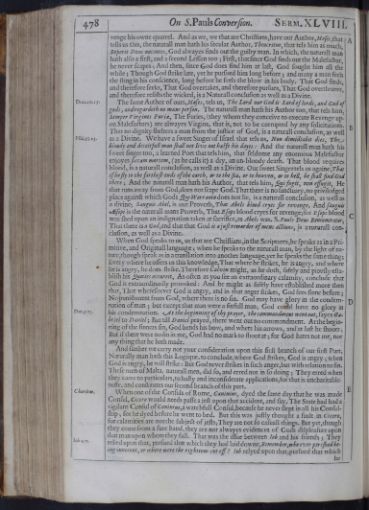 478
On S. Pauls Conversion.
Serm. XLVIII.
venge his owne quarrel. And as we, we that are Christians, have our Author, Moses, that
478
On S. Pauls Conversion.
Serm. XLVIII.
venge his owne quarrel. And as we, we that are Christians, have our Author, Moses, that
tells us this, the naturall man hath his secular Author, Theocritus, that tels him as much,
Reperit Deus nocentes, God alwayes finds out the guilty man. In which, the naturall man
hath also a first, and a second Lesson too; First, that since God finds out the Malefactor,
he never scapes; And then, since God does find him at last, God sought him all the
while; Though God strike late, yet he pursued him long before; and many a man feels
the sting in his conscience, long before he feels the blow in his body. That God finds,
and therefore seeks, That God overtakes, and therefore pursues, That God overthrows,
and therefore resists the wicked, is a Naturall conclusion as well as a Divine. The same Author of ours, Deut. 10.17. Moses, tels us, The Lord our God is Lord of lords, and God of
gods, and regardeth no mans person. The naturall man hath his Author too, that tels him,
Semper Virgines Furiæ, The Furies, (they whom they conceive to execute Revenge up-
on Malefactors) are alwayes Virgins, that is, not to be corrupted by any solicitations.
That no dignity shelters a man from the justice of God, is a naturall conclusion, as well
as a Divine.Psal. 55.23. We have a sweet Singer of Israel that tels us, Non dimidiabit dies, The
bloudy and deceitfull man shall not live out halfe his dayes: And the naturall man hath his
sweet singer too, a learned Poet that tels him, that seldome any enormous Malefactor
enjoyes siccam mortem, (as he calls it) a dry, an un-bloody death. That blood requires
blood, is a naturall conclusion, as well as a Divine. Our sweet Singer tels us againe, That
if he fly to the farthest ends of the earth, or to the sea, or to heaven, or to hell, he shall find God
there; And the naturall man hath his Author, that tels him, Qui fugit, non effugit, He
that runs away from God, does not scape God. That there is no sanctuary, no priviledged
place against which Gods Quo Warranto does not lie, is a naturall conclusion, as well as
a divine; Sanguis Abel, is our Proverb, That Abels blood cryes for revenge, And sanguis
Æsopi is the naturall mans Proverb, That Esops blood cryes for revenge; for Esops blood
was shed upon an indignation taken at sacrifice, as Abels was. S. Pauls Deus Remunerator,
That there is a God, and that that God is a just rewarder of mens actions, is a naturall con-
clusion, as well as a Divine. When God speaks to us, us that are Christians, in the Scriptures, he speaks as in a Pri-
mitive, and Originall language; when he speaks to the naturall man, by the light of na-
ture, though speak as in a translation into another language, yet he speaks the same thing;
Every where he offers us this knowledge, That where he strikes, he is angry, and where
he is angry, he does strike. Therefore Calvin might, as he doth, safely and piously esta-
blish his Quoties occurrit, As often as you see an extraordinary calamity, conclude that
God is extraordinarily provoked: And he might as safely have established more then
that, That wheresoever God is angry, and in that anger strikes, God sees sinne before;
No punishment from God, where there is no sin. God may have glory in the condem-
nation of man; but except that man were a sinfull man, God could have no glory in
his condemnation.Dan. 9.23. At the beginning of thy prayer, the commandment went out, sayes Ga-
briel to Daniel; But till Daniel prayed, there went out no commandment. At the begin-
ning of the sinners sin, God bends his bow, and whets his arrows, and at last he shoots;
But if there were no sin in me, God had no mark to shoot at; for God hates not me, nor
any thing that he hath made. And farther we carry not your consideration upon this first branch of our first Part,
Naturally man hath this Logique, to conclude, where God strikes, God is angry; when
God is angry, he will strike: But God never strikes in such anger, but with relation to sin.
These men of Malta, naturall men, did so, and erred not in so doing; They erred when
they came to particulars, to hasty and inconsiderate applications, for that is uncharitable-
nesse, and constitutes our second branch of this part. When one of the Consuls of Rome, Charitas. Caninius, dyed the same day that he was made
Consul, Cicero would needs passe a jest upon that accident, and say, The State had had a
vigilant Conful of Caninius, a watchfull Consul, because he never slept in all his Consul-
ship; for he dyed before he went to bed. But this was justly thought a fault in Cicero,
for calamities are not the subject of jests; They are not so casuall things. But yet, though
they come from a sure hand, they are not alwayes evidences of Gods displeasure upon
that man upon whom they fall. That was the issue between Iob and his friends; They
relied upon that, Iob 4.7. pursued that which they had laid downe, Remember, who ever perished be-
ing innocent, or where were the righteous cut off? Iob relyed upon that, pursued that which he
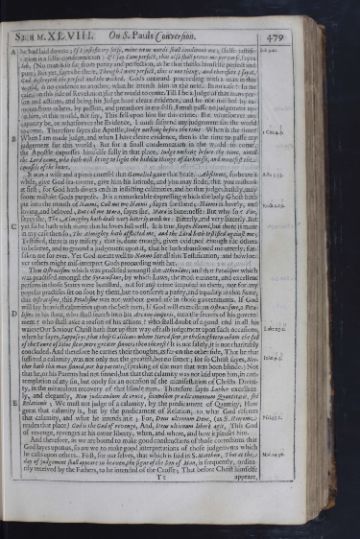 Serm. XLVIII.
On S. Pauls Conversion.
479
he had laid downe; If I justifie my selfe, mine owne words shall condemne me;Iob 9.20. (selfe-justifi-
Serm. XLVIII.
On S. Pauls Conversion.
479
he had laid downe; If I justifie my selfe, mine owne words shall condemne me;Iob 9.20. (selfe-justifi-cation is a selfe-condemnation) If I say I am perfect, that also shall prove me perverse, sayes
Iob. (No man is so far from purity and perfection, as he that thinks himselfe perfect and
pure) But yet, sayes he there, Though I were perfect, this is one thing, and therefore I say it,
God destroyeth the perfect and the wicked. Gods outward proceeding with a man in this
world, is no evidence to another, what he intends him in the next. In no case? In no
case, (on this side of Revelation) for the world to come. Till I be a Judge of that mans per-
son and actions, and being his Judge have cleare evidence, and be not mis-led by ru-
mours from others, by passion, and prejudices in my selfe, I must passe no judgement up-
on him, in this world, nor say, This fell upon him for this crime. But whatsoever my
capacity be, or whatsoever the Evidence, I must suspend my judgement for the world
to come. Therefore sayes the Apostle, Iudge nothing before the time:1 Cor. 4.5. When is the time?
When I am made Judge, and when I have cleare evidence, then is the time to passe my
judgement for this world; But for a finall condemnation in the world to come,
the Apostle expresses himselfe fully in that place, Iudge nothing before the time, untill
the Lord come, who both will bring to light the hidden things of darknesse, and manifest the
counsels of the heart. It was a wise and a pious counsel that Gamaliel gave that State, Abstinete, Acts 5.33. forbeare a
while, give God sea-roome, give him his latitude, and you may finde, that you mistook
at first; for God hath divers ends in inflicting calamities, and he that judges hastily, may
soone mistake Gods purpose. It is a remarkeable expressing which the holy Ghost hath
put into the mouth of Naomi, Call not me Naomi, sayes she there; Naomi is lovely, Ruth 1.19. and
loving, and beloved; But call me Mara, sayes she, Mara is bitternesse: But why so? For,
sayes she, The Almighty hath dealt very bitterly with me: Bitterly, and very bitterly. But
yet so he hath with many that he loves full well. It is true, sayes Naomi, but there is more
in my case then so; The Almighty hath afflicted me, and the Lord hath testified against me;
Testified, there is my misery; that is, done enough, given evidence enough for others
to beleeve, and to ground a judgement upon it, that he hath abandoned me utterly, for-
saken me for ever. Yet God meant well to Naomi for all this Testification, and howsoe-
ver others might mis-interpret Gods proceeding with her. That Ostracisme which was practised amongst the Athenians, and that Petalisme which
was practised amongst the Syracusians, by which Laws, the most eminent, and excellent
persons in those States were banished, not for any crime imputed to them, nor for any
popular practises set on foot by them, but to conserve a parity, and equality in that State,
this Ostracisme, this Petalisme was not without good use in those governments. If God
will lay heaviest calamities upon the best men, If God will exercise an Ostracisme, a Peta-
lisme in his state, who shall search into his Arcana imperii, into the secrets of his govern-
ment? who shall aske a reason of his actions? who shall doubt of a good end in all his
waies? Our Saviour Christ hath shut up that way of rash judgement upon such occasions, Luke 13.2.
when he sayes, Suppose ye, that those Galileans whom Herod slew, or those eighteen whom the fall
of the Towre of Siloe slew, were greater sinners then the rest? It is not safely, it is not charitably
concluded. And therefore he carries their thoughts, as far on the other side, That he that
suffered a calamity, was not only not the greatest, but no sinner; for so Christ sayes, Iohn 9.3. Nei-
ther hath this man sinned, nor his parents; (speaking of the man that was born blinde.) Not
that he, or his Parents had not sinned; but that that calamity was not laid upon him, in con-
templation of any sin, but onely for an occasion of the manifestation of Christs Divini-
ty, in the miraculous recovery of that blinde man. Therefore sayes Luther excellent-
ly, and elegantly, Non judicandum de cruce, secundùm prædicamentum Quantitatis, sed
Relationis; We must not judge of a calamity, by the predicament of Quantity, How
great that calamity is, but by the predicament of Relation, to what God referres
that calamity, and what he intends in it; For, Deus ultionum Deus, Psal. 93.1. (as S. Hierome
reades that place) God is the God of revenge, And, Deus ultionum liberè agit, This God
of revenge, revenges at his owne liberty, when, and where, and how it pleases him. And therefore, as we are bound to make good constructions of those corrections that
God layes upon us, so are we to make good interpretations of those judgements which
he casts upon others. First, for our selves, that which is saidMat. 24.30. in S. Matthew, That at the
day of judgement shall appeare in heaven, the signe of the Son of Man, is frequently, ordina-
rily received by the Fathers, to be intended of the Crosse; That before Christ himselfe Tt appeare,
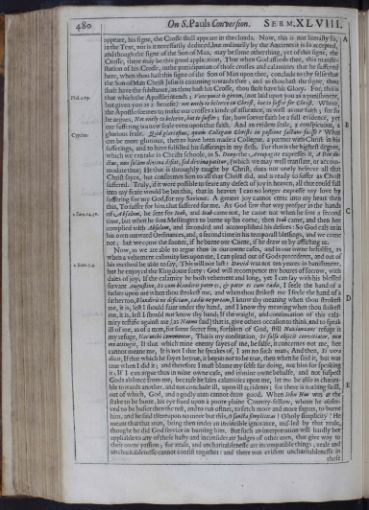 480
On S. Pauls Conversion.
Serm. XLVIII.
appeare, his signe, the Crosse shall appeare in the clouds. Now, this is not literally so,
480
On S. Pauls Conversion.
Serm. XLVIII.
appeare, his signe, the Crosse shall appeare in the clouds. Now, this is not literally so,
in the Text, nor is it necessarily deduced, but ordinarily by the Ancients it is so accepted,
and though the signe of the Son of Man, may be some other thing, yet of this signe, the
Crosse, there may be this good application, That when God affords thee, this manife-
station of his Crosse, in the participation of those crosses and calamities that he suffered
here, when thou hast this signe of the Son of Man upon thee, conclude to thy selfe that
the Son of Man Christ Jesus is comming towards thee; and as thou hast the signe; thou
shalt have the substance, as thou hast his Crosse, thou shalt have his Glory. For, this is
that which the Apostle intends;Phil. 1.29. Vnto you it is given, (not laid upon you as a punishment,
but given you as a benefit) not onely to beleeve in Christ, but to suffer for Christ. Where,
the Apostle seemes to make our crosses a kinde of assurance, as well as our faith; for so
he argues, Not onely to beleeve, but to suffer; for, howsoever faith be a full evidence, yet
our suffering is a new seale even upon that faith. And an evident seale, a conspicuous, a
glorious seale.Cyprian. Quid gloriosius, quam Collegam Christi in passione factum fuisse? What
can be more glorious, then to have been made a Collegue, a partner with Christ in his
sufferings, and to have fulfilled his sufferings in my flesh. For that is the highest degree,
which we can take in Christs schoole, as S. Denys the Areopagite expresses it, A Deo do-
ctus, non solùm divina discit, sed divina patitur, (which we may well translate, or accom-
modate thus) He that is throughly taught by Christ, does not onely beleeve all that
Christ sayes, but conformes him to all that Christ did, and is ready to suffer as Christ
suffered. Truly, if it were possible to feare any defect of joy in heaven, all that could fall
into my feare would be but this, that in heaven I can no longer expresse my love by
suffering for my God, for my Saviour. A greater joy cannot enter into my heart then
this, To suffer for him that suffered for me. As God saw that way prosper in the hands
of Absalom, 2 Sam. 14.30. he sent for Ioab, and Ioab came not, he came not when he sent a second
time, but when he sent Messengers to burne up his corne, then Ioab came, and then hee
complied with Absalom, and seconded and accomplished his desires: So God cals us in
his own outward Ordinances, and, a second time in his temporall blessings, and we come
not; but we come the sooner, if he burne our Corne, if he draw us by afflicting us. Now, as we are able to argue thus in our owne cases, and in our owne behalfes, as
when a vehement calamity lies upon me, I can plead out of Gods precedents, and out of
his method be able to say, 2 Sam. 5.4. This will not last: David was not ten yeares in banishment,
but he enjoyed the Kingdome forty: God will recompence my houres of sorrow, with
daies of joy; If the calamity be both vehement and long, yet I can say with his blessed
servant Augustine; Et cum blandiris pater es, & pater es cum cædis, I feele the hand of a
father upon me when thou strokest me, and when thou strikest me I feele the hand of a
father too, Blandiris ne deficiam, cædis ne peream, I know thy meaning when thou strokest
me, it is, lest I should faint under thy hand, and I know thy meaning when thou strikest
me, it is, lest I should not know thy hand; If the waight, and continuation of this cala-
mity testifie against me, (as Naomi said) that is, give others occasion to think, and to speak
ill of me, as of a man, for some secret sins, forsaken of God, still Nazianzens refuge is
my refuge, Hoc mihi commentor, This is my meditation, Si falsa objicit convitiator, non
me attingit, If that which mine enemy sayes of me, be false, it concernes not me, hee
cannot meane me, It is not I that he speakes of, I am no such man; And then, Si vera
dicit, If that which he sayes betrue, it begun not to be true, then when he said it, but was
true when I did it; and therefore I must blame my selfe for doing, not him for speaking
it; If I can argue thus in mine owne case, and in mine owne behalfe, and not suspect
Gods absence from me, because he laies calamities upon me, let me be also as charita-
ble towards another, and not conclude ill, upon ill accidents; for there is nothing so ill,
out of which, God, and a godly man cannot draw good. When Iohn Hus was at the
stake to be burnt, his eye fixed upon a poore plaine Country-fellow, whom he obser-
ved to be busier then the rest, and to run oftner, to fetch more and more fagots, to burne
him, and he said thereupon no more but this, O sancta simplicitas! O holy simplicity! He
meant that that man, being then under an invincible ignorance, mis-led by that zeale,
thought he did God service in burning him. But such an interpretation will hardly bee
appliable to any of these hasty and inconsiderate Judges of other men, that give way to
their owne passion; for zeale, and uncharitablenesse are incompatible things; zeale and
uncharitablenesse cannot consist together: and there was evident uncharitablenesse in these
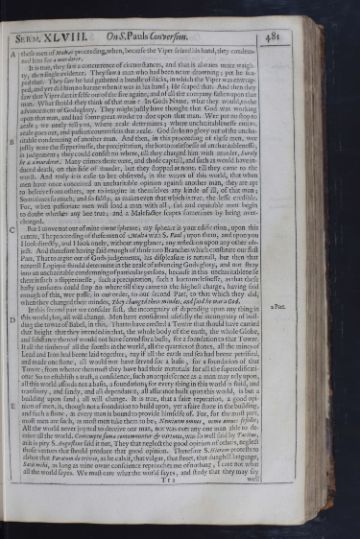 Serm. XLVIII.
On S. Pauls Conversion.
481
these men of Maltas proceeding, when, because the Viper seized his hand, they condem-
Serm. XLVIII.
On S. Pauls Conversion.
481
these men of Maltas proceeding, when, because the Viper seized his hand, they condem-ned him for a murderer. It is true, they saw a concurrence of circumstances, and that is alwaies more waigh-
ty, then single evidence. They saw a man who had been neare drowning; yet he sca-
ped that. They saw he had gathered a bundle of sticks, in which the Viper was enwrap-
ped, and yet did him no harme when it was in his hand; He scaped that. And then they
saw that Viper dart it selfe out of the fire againe, and of all the company fasten upon that
man. What should they think of that man? In Gods Name, what they would, to the
advancement of Gods glory. They might justly have thought that God was working
upon that man, and had some great worke to doe upon that man. Wee put no stop to
zeale; we onely tell you, where zeale determines; where uncharitablenesse enters,
zeale goes out, and passion counterfeits that zeale. God seeks no glory out of the uncha-
ritable condemning of another man. And then, in this proceeding of these men, wee
justly note the slipperinesse, the precipitation, the bottomelesnesse of uncharitablenesse,
in judgement; they could consist no where, till they charged him with murder, Surely
he is a murderer. Many crimes there were, and those capitall, and such as would have in-
duced death, on this side of murder, but they stopped at none, till they came to the
worst. And truly it is easie to bee observed, in the wayes of this world, that when
men have once conceived an uncharitable opinion against another man, they are apt
to beleeve from others, apt to imagine in themselves any kinde of ill, of that man;
Sometimes so much, and so falsly, as makes even that which is true, the lesse credible.
For, when passionate men will load a man with all, sad and equitable men begin
to doubt whether any bee true; and a Malefactor scapes sometimes by being over-
charged. But I move not out of mine owne spheare; my spheare is your edification, upon this
centre, The proceeding of these men of Malta with S. Paul; upon them, and upon you
I look directly, and I look onely, without any glance, any reflection upon any other ob-
ject. And therefore having said enough of those two Branches which constitute our first
Part, That to argue out of Gods judgements, his displeasure is naturall, but then that
naturall Logique should determine in the zeale of advancing Gods glory, and not stray
into an uncharitable condemning of particular persons, because in this uncharitablenesse
there is such a slipperinesse, such a precipitation, such a bottomelesnesse, as that these
hasty censurers could stop no where till they came to the highest charge; having said
enough of this, wee passe, in our order, to our second Part, to that which they did,
when they changed their mindes, They changed their mindes, and said he was a God. In this second part we consider first, 2 Part. the incongruity of depending upon any thing in
this world; for, all will change. Men have considered usefully the incongruity of buil-
ding the towre of Babel, in this, That to have erected a Towre that should have carried
that height that they intended in that, the whole body of the earth, the whole Globe,
and substance thereof would not have served for a basis, for a foundation to that Towre.
If all the timber of all the forests in the world, all the quarries of stones, all the mines of
Lead and Iron had beene laid together, nay if all the earth and sea had beene petrified,
and made one stone, all would not have served for a basis, for a foundation of that
Towre; from whence then must they have had their materials for all the superedificati-
ons? So to establish a trust, a confidence, such an acquiescence as a man may rely upon,
all this world affords not a basis, a foundation; for every thing in this world is fluid, and
transitory, and sandy, and all dependance, all assurance built upon this world, is but a
building upon sand; all will change. It is true, that a faire reputation, a good opi-
nion of men, is, though not a foundation to build upon, yet a faire stone in the building,
and such a stone, as every man is bound to provide himselfe of. For, for the most part,
most men are such, as most men take them to be; Neminem omnes, nemo omnes fefellit;
All the world never joyned to deceive one man, nor was ever any one man able to de-
ceive all the world. Contemptu famæ contemnuntur & virtutes, was so well said by Tacitus,
as it is pity S. Augustine said it not, They that neglect the good opinion of others, neglect
those vertues that should produce that good opinion. Therefore S. Hierom protests to
abhor that Paratum de trivio, as he cals it, that vulgar, that street, that dunghill language,
Satis mihi, as long as mine owne conscience reproaches me of nothing, I care not what
all the world sayes. We must care what the world sayes, and study that they may say Tt2 well
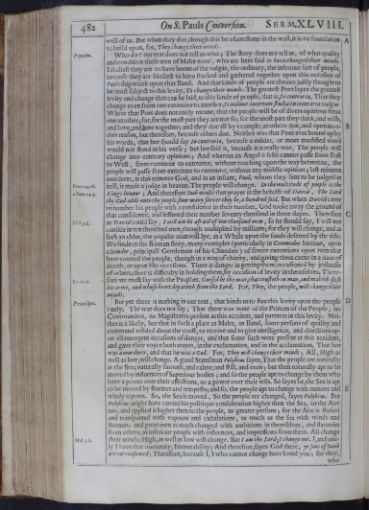 482
On S. Pauls Conversion.
Serm. XLVIII.
well of us. But when they doe, though this be a faire stone in the wall, it is no foundation
482
On S. Pauls Conversion.
Serm. XLVIII.
well of us. But when they doe, though this be a faire stone in the wall, it is no foundation
to build upon, for, They change their minds. Who do?Populus. our text does not tell us who; The story does not tell us, of what quality
and condition these men of Malta were, who are here said to have changed their minds.
Likeliest they are to have beene of the vulgar, the ordinary, the inferiour sort of people,
because they are likeliest to have flocked and gathered together upon this occasion of
Pauls shipwrack upon that Iland. And that kinde of people are alwaies justly thought to
be most subject to this levity, To change their minds. The greatest Poet layes the greatest
levity and change that can be laid, to this kinde of people; that is, In contraria, That they
change even from one extreame to another; Scinditur incertum studia in contraria vulgus.
Where that Poet does not onely meane, that the people will be of divers opinions from
one another; for, for the most part they are not so; for the most part they think, and wish,
and love, and hate together; and they doe all by example, as others doe, and upon no o-
ther reason, but therefore, because others doe. Neither was that Poet ever bound up by
his words, that hee should say In contraria, because a milder, or more modified word
would not stand in his verse; but hee said it, because it is really true, The people will
change into contrary opinions; And whereas an Angel it selfe cannot passe from East
to West, from extreame to extreame, without touching upon the way betweene, the
people will passe from extreame to extreame, without any middle opinion; last minutes
murderer, is this minutes God, and in an instant, Paul, whom they sent to be judged in
hell, Prov. 14.28. is made a judge in heaven. The people will change. In the multitude of people is the
Kings honour;2 Sam. 24.3. And therefore Ioab made that prayer in the behalfe of David, The Lord
thy God adde unto thy people, how many soever they be, a hundred fold. But when David came
to number his people with a confidence in their number, God tooke away the ground of
that confidence, and lessened their number seventy thousand in three dayes. Therefore
as David could say, Psal. 3.6. I will not be afraid of ten thousand men, so he should say, I will not
confide in ten thousand men, though multiplied by millions; for they will change, and at
such an ebbe, the popular man will lye, as a Whale upon the sands deserted by the tide.
We finde in the Roman story, many examples (particularly in Commodus his time, upon
Cleander, principall Gentleman of his Chamber) of severe executions upon men that
have courted the people, though in a way of charity, and giving them corne in a time of
dearth, or upon like occasions. There is danger in getting them, occasioned by jealousie
of others, there is difficulty in holding them, by occasion of levity in themselves; There-
fore we must say with the Prophet, Ier. 17.5. Cursed be the man, that trusteth in man, and maketh flesh
his arme, and whose heart departeth from the Lord. For, They, the people, will change their
minds. But yet there is nothing in our text, Principes. that binds us to fixe this levity upon the people
onely. The text does not say, That there was none of the Princes of the People, no
Commanders, no Magistrates present at this accident, and partners in this levity. Nei-
ther is it likely, but that in such a place as Malta, an Iland, some persons of quality and
command resided about the coast, to receive and to give intelligence, and directions up-
on all emergent occasions of danger, and that some such were present at this accident,
and gave their voyce both wayes, in the exclamation, and in the acclamation, That hee
was a murderer, and that he was a God. For, They will change their minds; All, High as
well as low, will change. A good Statesman Polybius sayes, That the people are naturally
as the Sea; naturally smooth, and calme, and still, and even; but then naturally apt to be
moved by influences of Superiour bodies; and so the people apt to change by them who
have a power over their affections, or a power over their wils. So sayes he, the Sea is apt
to be moved by stormes and tempests; and so, the people apt to change with rumors and
windy reports. So, the Sea is moved, So the people are changed, sayes Polybius. But
Polybius might have carried his politique consideration higher then the Sea, to the Aire
too; and applied it higher then to the people, to greater persons; for the Aire is shaked
and transported with vapours and exhalations, as much as the sea with winds and
stormes; and great men as much changed with ambitions in themselves, and flatteries
from others, as inferiour people with influences, and impressions from them. All change
their minds;Mal. 3.6. High, as well as low will change. But I am the Lord; I change not. I, and one-
ly I have that immunity, Immutability; And therefore, sayes God there, ye sons of Iacob
are not consumed; Therefore, because I, I who cannot change have loved you; for they, who
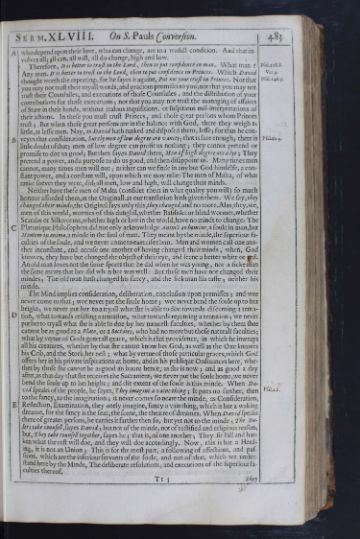 Serm. XLVIII.
On S. Pauls Conversion.
483
who depend upon their love, who can change, are in a wofull condition. And that in-
Serm. XLVIII.
On S. Pauls Conversion.
483
who depend upon their love, who can change, are in a wofull condition. And that in-volves all; all can, all will, all do change, high and low. Therefore, Psal. 118.8. It is better to trust in the Lord, then to put confidence in man. What man?
Ver. 9. Any man. It is better to trust in the Lord, then to put confidence in Princes. Which David
thought worth the repeating; for he sayes it againe, Put not your trust in Princes. Not that Psal. 146.3.
you may not trust their royall words, and gracious promises to you; not that you may not
trust their Counsailes, and executions of those Counsailes, and the distribution of your
contributions for those executions; not that you may not trust the managing of affaires
of State in their hands, without jealous inquifitions, or suspitious mis-interpretations of
their actions. In these you must trust Princes, and those great persons whom Princes
trust; But when these great persons are in the balance with God, there they weigh as
little, as lesse men. Nay, as David hath ranked and disposed them, lesse; for thus he con-
veyes that consideration, Surely men of low degree are vanity; that is sure enough;Psal. 62.5. there is
little doubt of that; men of low degree can profit us nothing; they cannot pretend or
promise to doe us good; But then sayes David there, Men of high degree are a lye; They
pretend a power, and a purpose to do us good, and then disappoint us. Many times men
cannot, many times men will not; neither can we finde in any but God himselfe, a con-
stant power, and a constant will, upon which we may relie: The men of Malta, of what
ranke soever they were, did; all men, low and high, will change their minds.
Neither have these men of Malta (consider them in what quality you will) so much
honour afforded them, in the Originall, as our translation hath given them. We say, they
changed their minds; the Original says only this, they changed, and no more. Alas, they, we,
men of this world, wormes of this dunghil, whether Basilisks or blind wormes, whether
Scarabs or Silkworms, whether high or low in the world, have no minds to change. The
Platonique Philosophers did not only acknowledge Animā in homine, a soule in man, but
Mentem in anima, a minde in the soul of man. They meant by the minde, the superiour fa-
culties of the soule, and we never come to exercise them. Men and women call one ano-
ther inconstant, and accuse one another of having changed their minds, when, God
knowes, they have but changed the object of their eye, and seene a better white or red.
An old man loves not the same sports that he did when he was young, nor a sicke man
the same meats that hee did when hee was well: But these men have not changed their
mindes; The old man hath changed his fancy, and the sick man his taste; neither his
minde.
The Mind implies consideration, deliberation, conclusion upon premisses; and wee
never come to that; wee never put the soule home; wee never bend the soule up to her
height; we never put her to a tryall what she is able to doe towards discerning a tenta-
tion, what towards resisting a tentation, what towards repenting a tentation; we never
put her to tryall what she is able to doe by her naturall faculties, whether by them shee
cannot be as good as a Plato, or a Socrates, who had no more but those naturall faculties;
what by vertue of Gods generall grace, which is that providence, in which he inwraps
all his creatures, whether by that she cannot know her God, as well as the Oxe knowes
his Crib, and the Stork her nest; what by vertue of those particular graces, which God
offers her in his private inspirations at home, and in his publique Ordinances here, whe-
ther by those she cannot be as good an houre hence, as she is now; and as good a day
after, as that day that she receives the Sacrament; we never put the soule home, we never
bend the soule up to her height; and the extent of the soule is this mind. When Da-
vid speaks of the people, he sayes, They imagine a vaine thing; It goes no farther, Psal. 2.2. then
to the fancy, to the imagination; it never comes so neare the minde, as Consideration,
Reflection, Examination, they onely imagine, fancy a vain thing, which is but a waking
dreame, for the fancy is the seat, the scene, the theatre of dreames. When David speaks
there of greater persons, he carries it farther then so, but yet not to the minde; The Ru-
lers take counsell, sayes David; but not of the minde, not of rectified and religious reason;
but, They take counsell together, sayes he; that is, of one another; They sit still and har-
ken what the rest will doe, and they will doe accordingly. Now, this is but a Herd-
ing, it is not an Union; This is for the most part, a following of affections, and pas-
sions, which are the inferiour servants of the soule, and not of that, which we under-
stand here by the Minde, The deliberate resolutions, and executions of the superiour fa-
culties thereof. Tt3 They
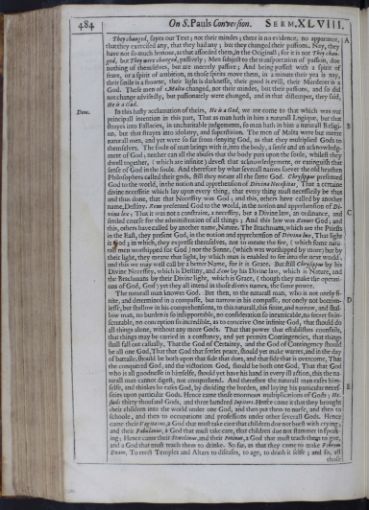 484
On S. Pauls Conversion.
Serm. XLVIII.
They changed, sayes our Text; not their mindes; there is no evidence, no apparance,
484
On S. Pauls Conversion.
Serm. XLVIII.
They changed, sayes our Text; not their mindes; there is no evidence, no apparance,
that they exercised any, that they had any; but they changed their passions. Nay, they
have not so much honour, as that afforded them, in the Originall; for it is not They chan-
ged, but They were changed, passively; Men subject to the transportation of passion, doe
nothing of themselves, but are meerely passive; And being possest with a spirit of
feare, or a spirit of ambition, as those spirits move them, in a minute their yea is nay,
their smile is a frowne, their light is darknesse, their good is evill, their Murderer is a
God. These men of Malta changed, not their mindes, but their passions, and so did
not change advisedly, but passionately were changed, and in that distemper, they said,
He is a God. In this hasty acclamation of theirs, Deus. He is a God, we are come to that which was our
principall intention in this part, That as man hath in him a naturall Logique, but that
strayes into Fallacies, in uncharitable judgements, so man hath in him a naturall Religi-
on, but that strayes into idolatry, and superstition. The men of Malta were but meere
naturall men, and yet were so far from denying God, as that they multiplied Gods to
themselves. The soule of man brings with it, into the body, a sense and an acknowledg-
ment of God; neither can all the abuses that the body puts upon the soule, whilest they
dwell together, (which are infinite) devest that acknowledgement, or extinguish that
sense of God in the soule. And therefore by what severall names soever the old heathen
Philosophers called their gods, still they meant all the same God. Chrysippus presented
God to the world, in the notion and apprehension of Divina Necessitas, That a certaine
divine necessitie which lay upon every thing, that every thing must necessarily be thus
and thus done, that that Necessity was God; and this, others have called by another
name, Destiny. Zeno presented God to the world, in the notion and apprehension of Di-
vina lex; That it was not a constraint, a necessity, but a Divine law, an ordinance, and
settled course for the administration of all things; And this law was Zenoes God; and
this, others have called by another name, Nature. The Brachmans, which are the Priests
in the East, they present God, in the notion and apprehension of Divina lux, That light
is God; in which, they expresse themselves, not to meane the fire, (which some natu-
rall men worshipped for God) nor the Sunne, (which was worshipped by more) but by
their light, they meane that light, by which man is enabled to see into the next world;
and this we may well call by a better Name, for it is Grace. But still Chrysippus by his
Divine Necessity, which is Destiny, and Zeno by his Divine law, which is Nature, and
the Brachmans by their Divine light, which is Grace, (though they make the operati-
ons of God, God) yet they all intend in those divers names, the same power. The naturall man knowes God. But then, to the naturall man, who is not onely fi-
nite, and determined in a compasse, but narrow in his compasse, not onely not bottom-
lesse, but shallow in his comprehensions, to this naturall, this finite, and narrow, and shal-
low man, no burden is so insupportable, no consideration so inextrieable, no secret so in-
scrutable, no conception so incredible, as to conceive One infinite God, that should do
all things alone, without any more Gods. That that power that establishes counsails,
that things may be carried in a constancy, and yet permits Contingencies, that things
shall fall out casually, That the God of Certainty, and the God of Contingency should
be all one God, That that God that settles peace, should yet make warres, and in the day
of battaile, should be both upon that side that does, and that side that is overcome, That
the conquered God, and the victorious God, should be both one God, That that God
who is all goodnesse in himselfe, should yet have his hand in every ill action, this the na-
turall man cannot digest, not comprehend. And therefore the naturall man eases him-
selfe, and thinkes he eases God, by dividing the burden, and laying his particular neces-
sities upon particular Gods. Hence came those enormous multiplications of Gods; He-
siods thirty thousand Gods, and three hundred Iupiters. Hence came it that they brought
their children into the world under one God, and then put them to nurse, and then to
schoole, and then to occupations and professions under other severall Gods. Hence
came their Vagitanus, a God that must take care that children doe not burst with crying;
and their Fabulanus, a God that must take care, that children doe not stammer in speak-
ing; Hence came their Statelinus, and their Potinus, a God that must teach them to goe,
and a God that must teach them to drinke. So far, as that they came to make Febrem
Deam, To erect Temples and Altars to diseases, to age, to death it selfe; and so, all those
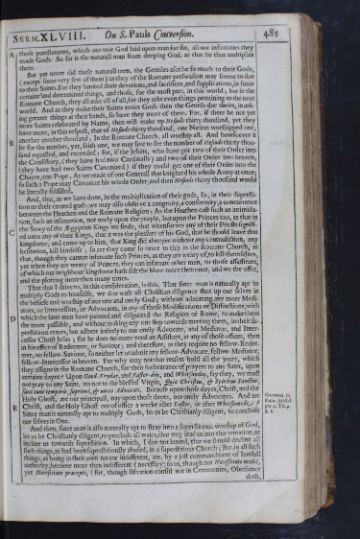 Serm. XLVIII.
On S. Pauls Conversion.
485
those punishments, which our true God laid upon man for sin, all our infirmities they
Serm. XLVIII.
On S. Pauls Conversion.
485
those punishments, which our true God laid upon man for sin, all our infirmities they
made Gods. So far is the naturall man from denying God, as that he thus multiplies
them. But yet never did these naturall men, the Gentiles ascribe so much to their Gods,
(except some very few of them) as they of the Romane perswasion may seeme to doe
to their Saints. For they limited their devotions, and sacrifices, and supplications, in some
certaine and determined things, and those, for the most part, in this world; but in the
Romane Church, they all aske all of all, for they aske even things pertaining to the next
world. And as they make their Saints verier Gods then the GentilsGentiles doe theirs, in ask-
ing greater things at their hands, so have they more of them. For, if there be not yet
more Saints celebrated by Name, then will make up Hesiods thirty thousand, yet they
have more, in this respect, that of Hesiods thirty thousand, one Nation worshiped one,
another another thousand; In the Romane Church, all worship all. And howsoever it
be for the number, yet, saith one, we may live to see the number of Hesiods thirty thou-
sand equalled, and exceeded; for, if the Jesuits, who have got two of their Order into
the Consistory, (they have had two Cardinalls) and two of their Order into heaven,
(they have had two Saints Canonized) if they could get one of their Order into the
Chayre, one Pope; As we reade of one Generall that knighted his whole Army at once;
so such a Pope may Canonize his whole Order, and then Hesiods thirty thousand would
be literally fulfilled. And, that, as we have done, in the multiplication of their gods, so, in their supersti-
tion to their created gods, we may also observe a congruity, a conformity, a concurrence
between the Heathen and the Romane Religion; As the Heathen cast such an intimida-
tion, such an infatuation, not onely upon the people, but upon the Princes too, as that in
the Story of the Ægyptian Kings we finde, that whensoever any of their Priests signifi-
ed unto any of their Kings, that it was the pleasure of his God, that he should leave that
kingdome, and come up to him, that King did alwayes without any contradiction, any
hesitation, kill himselfe; so are they come so neare to this in the Romane Church, as
that, though they cannot infatuate such Princes, as they are weary of, to kill themselves,
yet when they are weary of Princes, they can infatuate other men, to those assassinats,
of which our neighbour kingdome hath felt the blow more then once, and we the offer,
and the plotting more then many times. That that I drive to, in this consideration, is this, That since man is naturally apt to
multiply Gods to himselfe, we doe with all Christian diligence shut up our selves in
the beliefe and worship of our one and onely God; without admitting any more Medi-
ators, or Intercessors, or Advocates, in any of those Modifications or Distinctions, with
which the later men have painted and disguized the Religion of Rome, to make them
the more passable, and without making any one step towards meeting them, in their su-
perstitious errors, but adhere intirely to our onely Advocate, and Mediator, and Inter-
cessor Christ Jesus; for he does no more need an Assistant, in any of those offices, then
in his office of Redeemer, or Saviour; and therefore, as they require no fellow-Redee-
mer, no fellow-Saviour, so neither let us admit any fellow-Advocate, fellow-Mediator,
fellow-Intercessor in heaven. For why may not that reason hold all the yeare, which
they assigne in the Romane Church, for their forbearance of prayers to any Saint, upon
certaine dayes? Upon Good-Fryday, and Easter-day, and Whitsunday, say they, we must
not pray to any Saint, no not to the blessed Virgin, Quia Christus, & Spiritus Sanctus,
sunt tunc temporis, supremi, & unici Advocati. Because upon those dayes, Christ, and the
Holy Ghost, are our principall, nay upon those dayes, our onely Advocates.Garantus in
Rubr. Missal.
par. 1. Tit. 9.
§. 8. And are
Christ, and the Holy Ghost out of office a weeke after Easter, or after Whitsontide?
Since man is naturally apt to multiply Gods, let us be Christianly diligent, to conclude
our selves in One. And then, since man is also naturally apt to stray into a superstitious worship of God,
let us be Christianly diligent, to preclude all waies, that may lead us into that tentation, or
incline us towards superstition. In which, I doe not intend, that we should decline all
such things, as had been superstitiously abused, in a superstitious Church; But, in all such
things, as being in their own nature indifferent, are, by a just commandment of lawfull
authority, become more then indifferent (necessary) to us, though not Necessitate medii,
yet Necessitate præcepti, (for, though salvation consist not in Ceremonies, Obedience doth,
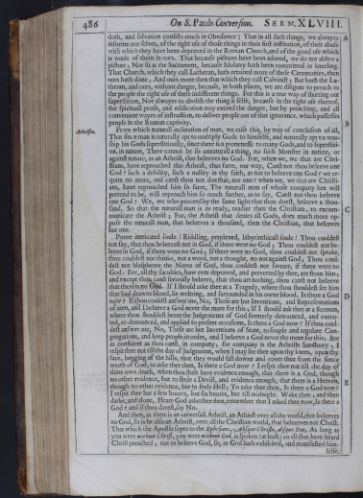 486
On S. Pauls Conversion.
Serm. XLVIII.
doth, and salvation consists much in Obedience) That in all such things, we alwayes
486
On S. Pauls Conversion.
Serm. XLVIII.
doth, and salvation consists much in Obedience) That in all such things, we alwayes
informe our selves, of the right use of those things in their first institution, of their abuse
with which they have been depraved in the Roman Church, and of the good use which
is made of them in ours. That because pictures have been adored, we do not abhor a
picture; Nor sit at the Sacrament, because Idolatry hath been committed in kneeling.
That Church, which they call Lutheran, hath retained more of these Ceremonies, then
ours hath done; And ours more then that which they call Calvinist; But both the Lu-
theran, and ours, without danger, because, in both places, we are diligent to preach to
the people the right use of these indifferent things. For this is a true way of shutting out
superstition, Not alwayes to abolish the thing it selfe, because in the right use thereof,
the spirituall profit, and edification may exceed the danger, but by preaching, and all
convenient wayes of instruction, to deliver people out of that ignorance, which possesses
people in the Roman captivity. From which naturall inclination of man, Atheista. we raise this, by way of conclusion of all,
That since man is naturally apt to multiply Gods to himselfe, and naturally apt to wor-
ship his Gods superstitiously, since there is a pronenesse to many Gods, and to superstiti-
on, in nature, There cannot be so unnaturall a thing, no such Monster in nature, or
against nature, as an Atheist, that beleeves no God. For, when we, we that are Chri-
stians, have reproached this Atheist, thus farre, our way, Canst not thou beleeve one
God? such a debility, such a nullity in thy faith, as not to beleeve one God? we re-
quire no more, and canst thou not doe that, not one? when we, we that are Christi-
ans, have reproached him so farre, The naturall man of whose company hee will
pretend to be, will reproach him so much farther, as to say, Canst not thou beleeve
one God? We, we who proceed by the same light that thou doest, beleeve a thou-
sand. So that the naturall man is as ready, readier then the Christian, to excom-
municate the Atheist; For, the Atheist that denies all Gods, does much more op-
pose the naturall man, that beleeves a thousand, then the Christian, that beleeves
but one. Poore intricated soule! Riddling, perplexed, labyrinthicall soule! Thou couldest
not say, that thou beleevest not in God, if there were no God; Thou couldest not be-
leeve in God, if there were no God; If there were no God, thou couldest not speake,
thou couldest not thinke, not a word, not a thought, no not against God; Thou coul-
dest not blaspheme the Name of God, thou couldest not sweare, if there were no
God: For, all thy faculties, how ever depraved, and perverted by thee, are from him;
and except thou canst seriously beleeve, that thou art nothing, thou canst not beleeve
that there is no God. If I should aske thee at a Tragedy, where thou shouldest see him
that had drawne blood, lie weltring, and surrounded in his owne blood, Is there a God
now? If thou couldst answer me, No, These are but Inventions, and Representations
of men, and I beleeve a God never the more for this; If I should ask thee at a Sermon,
where thou shouldest heare the Judgements of God formerly denounced, and execu-
ted, re-denounced, and applied to present occasions, Is there a God now? If thou coul-
dest answer me, No, These are but Inventions of State, to souple and regulate Con-
gregations, and keep people in order, and I beleeve a God never the more for this; Bee
as confident as thou canst, in company; for company is the Atheists Sanctuary; I
respit thee not till the day of Judgement, when I may see thee upon thy knees, upon thy
face, begging of the hills, that they would fall downe and cover thee from the fierce
wrath of God, to aske thee then, Is there a God now? I respit thee not till the day of
thine own death, when thou shalt have evidence enough, that there is a God, though
no other evidence, but to finde a Devill, and evidence enough, that there is a Heaven,
though no other evidence, but to feele Hell; To aske thee then, Is there a God now?
I respit thee but a few houres, but six houres, but till midnight. Wake then; and then
darke, and alone, Heare God aske thee then, remember that I asked thee now, Is there a
God? and if thou darest, say No. And then, as there is an universall Atheist, an Athiest over all the world, that beleeves
no God, so is he also an Atheist, over all the Christian world, that beleeves not Christ.
That which the Apostle sayes to the Ephesians, Absque Christo, absque Deo, As long as
you were without Christ, you were without God, is spoken (at least) to all that have heard
Christ preached; not to beleeve God, so, as God hath exhibited, and manifested him-
selfe,
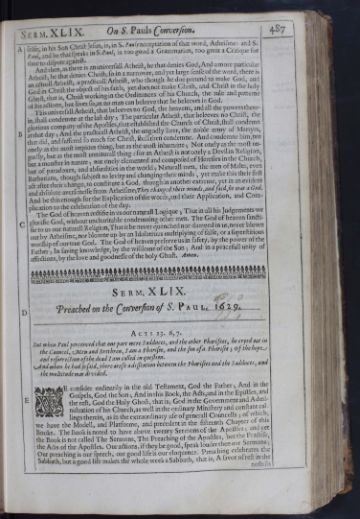 Serm. XLIX.
On S. Pauls Conversion.
487
selfe, in his Son Christ Jesus, is, in S. Pauls acceptation of that word, Atheisme: and S.
Serm. XLIX.
On S. Pauls Conversion.
487
selfe, in his Son Christ Jesus, is, in S. Pauls acceptation of that word, Atheisme: and S.
Paul, and he that speaks in S. Paul, is too good a Grammarian, too great a Critique for
thee to dispute against. And then, as there is an universall Atheist, he that denies God, And a more particular
Atheist, he that denies Christ; so in a narrower, and yet large sense of the word, there is
an actuall Atheist, a practicall Atheist, who though he doe pretend to make God, and
God in Christ the object of his faith, yet does not make Christ, and Christ in the holy
Ghost, that is, Christ working in the Ordinances of his Church, the rule and patterne
of his actions, but lives so, as no man can beleeve that he beleeves in God. This universall Atheist, that beleeves no God, the heavens, and all the powers there-
in, shall condemne at the last day; The particular Atheist, that beleeves no Christ, the
glorious company of the Apostles, that established the Church of Christ, shall condemn
at that day; And the practicall Atheist, the ungodly liver, the noble army of Martyrs,
that did, and suffered so much for Christ, shall then condemne. And condemne him, not
onely as the most impious thing, but as the most inhumane; Not onely as the most un-
godly, but as the most unnaturall thing: for an Atheist is not onely a Devil in Religion,
but a monster in nature; not onely elemented and composed of Heresies in the Church,
but of paradoxes, and absurdities in the world; Naturall men, the men of Malta, even
Barbarians, though subject to levity and changing their minds, yet make this their first
act after their change, to constitute a God, though in another extreme, yet in an evident
and absolute aversenesse from Atheisme; They changed their minds, and said, he was a God.
And be this enough for the Explication of the words, and their Application, and Com-
plication to the celebration of the day. The God of heaven rectifie in us our naturall Logique; That in all his Judgements we
glorifie God, without uncharitable condemning other men. The God of heaven sancti-
fie to us our naturall Religion, That it be never quenched nor damped in us, never blown
out by Atheisme, nor blowne up by an Idolatrous multiplying of false, or a superstitious
worship of our true God. The God of heaven preserve us in safety, by the power of the
Father; In saving knowledge, by the wisdome of the Son; And in a peacefull unity of
affections, by the love and goodnesse of the holy Ghost. Amen.
Serm. XLIX.
Preached on the Conversion of S. PAUL. 1629.
Acts 23. 6, 7.
But when Paul perceived that one part were Sadduces, and the other Pharisees, he cryed out in
the Councel, Men and Brethren, I am a Pharisee, and the son of a Pharisee; Of the hope
and resurrection of the dead I am called in question.
And when he had so said, there arose a dissention between the Pharisees and the Sadduces, and
the multitude was divided.
WEWe consider ordinarily in the old Testament, God the Father; And in the
Gospels, God the Son; And in this Book, the Acts, and in the Epistles, and
the rest, God the Holy Ghost, that is, God in the Government and Admi-
nistration of his Church, as well in the ordinary Ministery and constant cal-
lings therein, as in the extraordinary use of generall Councells; of which,
we have the Modell, and Platforme, and precedent in the fifteenth Chapter of this
Booke. The Book is noted to have above twenty Sermons of the Apostles; and yet
the Book is not called The Sermons, The Preaching of the Apostles, but the Practise,
the Acts of the Apostles. Our actions, if they be good, speak louder then our Sermons;
Our preaching is our speech, our good life is our eloquence. Preaching celebrates the
Sabbath, but a good life makes the whole week a Sabbath, that is, A savor of rest in the nostrils
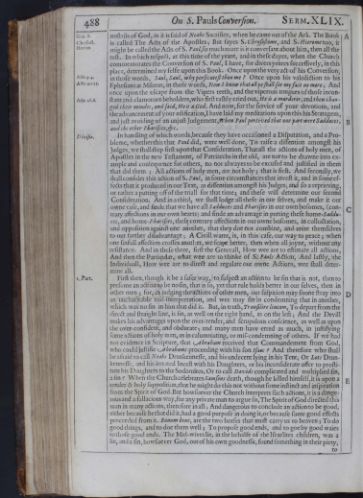 488
On S. Pauls Conversion.
Serm. XLVIX.
nostrils of God, Gen. 8.
488
On S. Pauls Conversion.
Serm. XLVIX.
nostrils of God, Gen. 8. Chrysost.
Hieron. as it is said of Noahs Sacrifice, when he came out of the Ark. The Book
is called The Acts of the Apostles; But sayes S. Chrysostome, and S. Hierome too, it
might be called the Acts of S. Paul, so much more is it conversant about him, then all the
rest. In which respect, at this time of the yeare, and in these dayes, when the Church
commemorates the Conversion of S. Paul, I have, for divers yeares successively, in this
place, determined my selfe upon this Book. Once upon the very act of his Conversion,
in those words, Acts 9.4.
Acts 20.25. Saul, Saul, why persecutest thou me? Once upon his valediction to his
Ephesians at Miletus, in those words, Now I know that all ye shall see my face no more; And
once upon the escape from the Vipers teeth, and the viperous tongues of those incon-
stant and clamorous beholders, Acts 28.6. who first rashly cried out, He is a murderer, and then chan-
ged their mindes, and said, He is a God. And now, for the service of your devotions, and
the advancement of your edification, I have laid my meditations upon this his Stratagem,
and just avoiding of an unjust Judgement, When Paul percived that one part were Sadduces,
and the other Pharisees, &c.
In handling of which words, Divisio. because they have occasioned a Disputation, and a Pro-
bleme, whether this that Paul did, were well done, To raise a dissention amongst his
Judges, we shall stop first upon that Consideration, That all the actions of holy men, of
Apostles in the new Testament, of Patriarchs in the old, are not to be drawne into ex-
ample and consequence for others, no nor alwayes to be excused and justified in them
that did them; All actions of holy men, are not holy; that is first. And secondly, we
shall consider this action of S. Paul, in some circumstances that invest it, and in some ef-
fects that it produced in our Text, as dissention amongst his Judges, and so a reprieving,
or rather a putting off of the triall for that time; and these will determine our second
Consideration. And in a third, we shall lodge all these in our selves, and make it our
owne case, and finde that we have all Sadduces and Pharisees in our own bosomes, (con-
trary affections in our own hearts) and finde an advantage in putting these home-Saddu-
ces, and home-Pharisees, these contrary affections in our owne bosomes, in colluctation,
and opposition against one another, that they doe not combine, and unite themselves
to our farther disadvantage; A Civill warre, is, in this case, our way to peace; when
one sinfull affection crosses another, we scape better, then when all joyne, without any
resistance. And in these three, first the Generall, How wee are to estimate all actions,
And then the Particular, what wee are to thinke of S. Pauls Action, And lastly, the
Individuall, How wee are to direct and regulate our owne Actions, wee shall deter-
mine all.
First then, 1. Part. though it be a safer way, to suspect an action to be sin that is not, then to
presume an action to be no sin, that is so, yet that rule holds better in our selves, then in
other men; for, in judging the actions of other men, our suspition may soone stray into
an uncharitable mis-interpretation, and wee may sin in condemning that in another,
which was no sin in him that did it. But, in truth, Transilire lineam, To depart from the
direct and straight line, is sin, as well on the right hand, as on the left; And the Devill
makes his advantages upon the over-tender, and scrupulous conscience, as well as upon
the over-confident, and obdurate; and many men have erred as much, in justifying
some actions of holy men, as in calumniating, or mis-condemning of others. If we had
not evidence in Scripture, that Abraham received that Commandement from God,
who could justifie Abrahams proceeding with his son Isaac? And therefore who shall
be afraid to call Noahs Drunkennesse, and his undecent lying in his Tent, Or Lots Drun-
kennesse, and his iterated Incest with his Daughters, or his inconsiderate offer to prosti-
tute his Daughters to the Sodomites, Or to call Davids complicated and multiplied sin,
a sin? When the Church celebrates Samsons death, though he killed himself, it is upon a
tender & holy supposition, that he might do this not without some instinct and inspiration
from the Spirit of God. But howsoever the Church interprets such actions, it is a dange-
rous and a fallacious way, for any private man to argue so, The Spirit of God directed this
man in many actions, therefore in all; And dangerous to conclude an action to be good,
either because he that did it, had a good purpose in doing it, or because some good effects
proceeded from it. Bonum bene, are the two horses that must carry us to heaven; To do
good things, and to doe them well; To propose good ends, and to goe by good waies
to those good ends. The Mid-wives lie, in the behalfe of the Israelites children, was a
lie, and a sin, howsoever God, out of his own goodnesse, found something in their piety, to
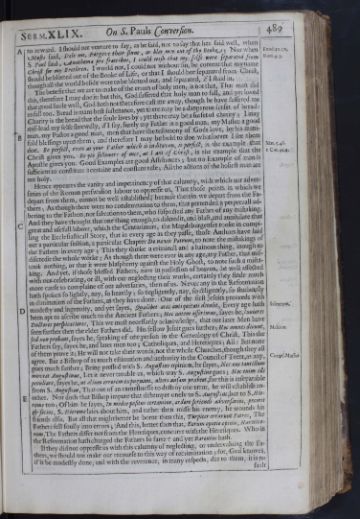 Serm. XLVIX.
On S. Pauls Conversion.
489
to reward. I should not venture to say, as he said, nor to say that hee said well, when
Serm. XLVIX.
On S. Pauls Conversion.
489
to reward. I should not venture to say, as he said, nor to say that hee said well, when
Moses said, Dele me, Forgive their sinne, or blot mee out of thy Booke;Exod. 32.32.
Rom. 9 3. Nor when
S. Paul said, Anathema pro fratribus, I could wish that my selfe were separated from
Christ for my Brethren. I would not, I could not without sin, be content that my name
should be blotted out of the Booke of Life, or that I should bee separated from Christ,
though all the world beside were to be blotted out, and separated, if I staid in.
The benefit that we are to make of the errors of holy men, is not that, That man did
this, therefore I may doe it: but this, God suffered that holy man to fall, and yet loved
that good soule well, God hath not therefore cast me away, though he have suffered me
to fall too. Bread is mans best sustenance, yet there may be a dangerous surfet of bread:
Charity is the bread that the soule lives by; yet there may be a surfet of charity; I may
mis-lead my selfe shrewdly, if I say, surely my Father is a good man, my Master a good
man, my Pastor a good man, men that have the testimony of Gods love, by his mani-
fold blessings upon them; and therefore I may be bold to doe whatsoever I see them
doe. Be perfect, even as your Father which is in heaven, is perfect, Mat. 5.48.
1 Cor. 11.1. is the example that
Christ gives you. Be yee followers of mee, as I am of Christ, is the example that the
Apostle gives you. Good Examples are good Assistances; but no Example of man is
sufficient to constitute a certaine and constant rule; All the actions of the holiest man are
not holy.
Hence appeares the vanity and impertinency of that calumny, with which our adver-
saries of the Roman perswasion labour to oppresse us, That those points in which we
depart from them, cannot be well established, because therein we depart from the Fa-
thers; As though there were no condemnation to them, that pretended a perpetuall ad-
hering to the Fathers, nor salvation to them, who suspected any Father of any mistaking.
And they have thought that one thing enough, to discredit, and blast, and annihilate that
great and usefull labour, which the Centuriators, the Magdeburgenses tooke in compi-
ling the Ecclesiasticall Story, that in every age as they passe, those Authors have laid
out a particular section, a particular Chapter De nævis Patrum, to note the mistakings of
the Fathers in every age; This they thinke a criminall and a hainous thing, inough to
discredit the whole worke; As though there were ever in any age, any Father, that mis-
took nothing, or that it were blasphemy against the Holy Ghost, to note such a mista-
king. And yet, if those blessed Fathers, now in possession of heaven, be well affected
with our celebrating, or ill, with our neglecting their works, certainly they finde much
more cause to complaine of our adversaries, then of us. Never any in the Reformation
hath spoken so lightly, nay, so heavily; so negligently, nay, so diligently, so studiously
in diminution of the Fathers, as they have done. One of the first Jesuits proceeds with
modesty and ingenuity, and yet sayes, Quælibet ætas antiquitati detulit, Salmeron. Every age hath
been apt to ascribe much to the Ancient Fathers; Hoc autem asserimus, sayes he, Iuniores
Doctores perspicaciores, This we must necessarily acknowledge, that our later Men have
seen farther then the elder Fathers did. His fellow Jesuit goes farther; Maldon. Hoc omnes dicunt,
sed non probant, sayes he, speaking of one person in the Genealogy of Christ, This the
Fathers say, sayes he, and later men too; Catholiques, and Heretiques; All: But none
of them prove it; He will not take their words, not the whole Churches, though they all
agree. But a Bishop of as much estimation and authority in the Council of Trent, as any, Cornel. Muffus
goes much farther; Being pressed with S. Augustins opinion, he sayes, Nec nos tantillum
moveat Augustinus, Let it never trouble us, which way S. Augustine goes; Hoc enim illi
peculiare, sayes he, ut alium errorem expugnans, alteri ansam præbeat, for this is inseparable
from S. Augustine, That out of an earnestnesse to destroy one error, he will establish an-
other. Nor doth that Bishop impute that distemper onely to S. Augustine, but to S. Hie-
rome too; Of him he sayes, In medio positus certamine, ardore feriendi adversarios, premit
& socios, S. Hierome laies about him, and rather then misse his enemy, he wounds his
friends also. But all that might better be borne then this, Turpiter errarunt Patres, The
Fathers fell foully into errors; And this, better then that, Eorum opinio, opinio Hæretico-
rum, The Fathers differ not from the Heretiques, concurre with the Heretiques. Who in
the Reformation hath charged the Fathers so farre? and yet Baronius hath.
If they did not oppresse us with this calumny of neglecting, or undervaluing the Fa-
thers, we should not make our recourse to this way of recrimination; for, God knowes,
if it be modestly done, and with the reverence, in many respects, due to them, it is no fault
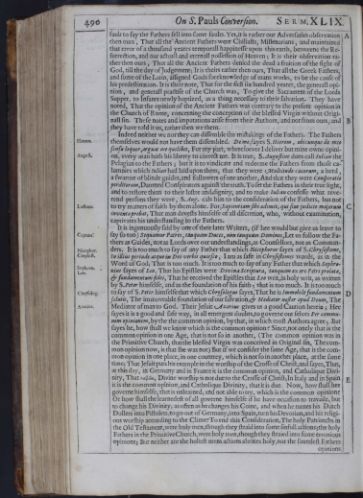 490
On S. Pauls Conversion.
Serm. XLVIX.
fault to say the Fathers fell into some faults. Yet, it is rather our Adversaries observation
490
On S. Pauls Conversion.
Serm. XLVIX.
fault to say the Fathers fell into some faults. Yet, it is rather our Adversaries observation
then ours, That all the Ancient Fathers were Chiliasts, Millenarians, and maintained
that error of a thousand yeares temporall happinesse upon this earth, betweene the Re-
surrection, and our actuall and eternall possession of Heaven; It is their observation ra-
ther then ours, That all the Ancient Fathers denied the dead a fruition of the sight of
God, till the day of Judgement; It is theirs rather then ours, That all the Greek Fathers,
and some of the Latin, assigned Gods foreknowledge of mans works, to be the cause of
his predestination. It is their note, That for the first six hundred yeares, the generall opi-
nion, and generall practise of the Church was, To give the Sacrament of the Lords
Supper, to Infants newly baptized, as a thing necessary to their salvation. They have
noted, That the opinion of the Ancient Fathers was contrary to the present opinion in
the Church of Rome, concerning the conception of the blessed Virgin without Origi-
nall sin. These notes and imputations arise from their Authors, and not from ours, and
they have told it us, rather then we them.
Indeed neither we nor they can dissemble the mistakings of the Fathers. The Fathers
themselves would not have them dissembled.Hieron. De me, sayes S. Hierom, ubicunque de meo
sensu loquor, arguat me quilibet, For my part, wheresoever I deliver but mine owne opini-
on, every man hath his liberty to correct me. It is true, S. Augustine does call Iulian the August.
Pelagian to the Fathers; but it is to vindicate and redeeme the Fathers from those ca-
lumnies which Iulian had laid upon them, that they were Multitudo cæcorum, a herd,
a swarme of blinde guides, and followers of one another, And that they were Conspiratio
perditorum, Damned Conspirators against the truth. To set the Fathers in their true light,
and to restore them to their lustre and dignity, and to make Iulian confesse what reve-
rend persons they were, S. Aug. cals him to the consideration of the Fathers, but not
to try matters of faith by them alone.Lactant. For, Sapientiam sibi adimit, qui sine judicio majorum
inventa probat, That man devests himselfe of all discretion, who, without examination,
captivates his understanding to the Fathers.
It is ingenuously said by one of their later Writers, (if hee would but give us leave to
say so too) Sequamur Patres, Cajetan. tanquam Duces, non tanquam Dominos, Let us follow the Fa-
thers as Guides, not as Lords over our understandings, as Counsellors, not as Comman-
ders.Nicephor.
Chrysost. It is too much to say of any Father that which Nicephorus sayes of S. Chrysostome,
In illius perinde atque in Dei verbis quiesco, I am as safe in Chrysostomes words, as in the
Word of God; That is too much. It is too much to say of any Father that which Sophro-
nius sayes of Leo, That his Epistles were Divina Scriptura, tanquam ex ore Petri prolata, Sophron.
Leo.
& fundamentum fidei, That he received the Epistles that Leo writ, as holy writ, as written
by S. Peter himselfe, and as the foundation of his faith; that is too much. It is too much
to say of S. Peter himselfe that which Chrysologus sayes, Chrysolog. That he is Immobile fundamentum
salutis, The immoveable foundation of our salvation, & Mediator noster apud Deum, The
Mediator of man to God.Azorius. Their Jesuit Azorius gives us a good Caution herein; Hee
sayes it is a good and safe way, in all emergent doubts, to governe our selves Per commu-
nem opinionem, by the the common opinion, by that, in which most Authors agree; But
sayes he, how shall we know which is the common opinion? Since, not onely that is the
common opinion in one Age, that is not so in another, (The common opinion was in
the Primitive Church, that the blessed Virgin was conceived in Original sin, The com-
mon opinion now, is that she was not) But if we confider the same Age, that is the com-
mon opinion in one place, in one countrey, which is not so in another place, at the same
time; That Jesuit puts his example in the worship of the Crosse of Christ, and sayes, That,
at this day, in Germany and in France it is the common opinion, and Catholique Divi-
nity, That λατρεία, Divine worship is not due to the Crosse of Christ; In Italy and in Spain
it is the common opinion, and Catholique Divinity, that it is due. Now, how shall hee
governe himselfe, that is unlearned, and not able to try, which is the common opinion?
Or how shall the learnedest of all governe himselfe if he have occasion to travaile, but
to change his Divinity, as often as he changes his Coine, and when he turnes his Dutch
Dollers into Pistolets, to go out of Germany, into Spain, turn his Devotion, and his religi-
ous worship according to the Clime? To end this Consideration, The holy Patriarchs in
the Old Testament, were holy men, though they straid into some sinfull actions; the holy
Fathers in the Primitive Church, were holy men, though they straied into some erronious
opinions; But neither are the holiest mens actions alwaies holy, nor the soundest Fathers opinions
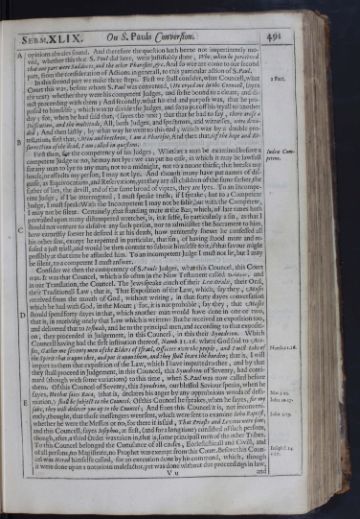 Serm. XLVIX.
On S. Pauls Conversion.
491
opinions alwaies sound. And therefore the question hath beene not impertinently mo-
Serm. XLVIX.
On S. Pauls Conversion.
491
opinions alwaies sound. And therefore the question hath beene not impertinently mo-ved, whether this that S. Paul did here, were justifiably done, Who, when he perceived
that one part were Sadduces, and the other Pharisees, &c. And so wee are come to our second
part, from the consideration of Actions in generall, to this particular action of S. Paul.
In this second part we make three steps. First we shall consider, what Councell, 2 Part. what
Court this was, before whom S. Paul was convented, (He cryed out in the Councell, sayes
the text) whether they were his competent Judges, and so he bound to a cleare, and di-
rect proceeding with them; And secondly, what his end and purpose was, that he pro-
posed to himselfe; which was to divide the Judges, and so to put off his tryall to another
day; for, when he had said that, (sayes the text) that that he had to say, there arose a
Dissention, and the multitude, All, both Judges, and spectators, and witnesses, were divi-
ded; And then lastly, by what way he went to this end; which was by a double pro-
testation; first that, Men and brethren, I am a Pharisee; And then that, Of the hope and Re-
surrection of the dead, I am called in question.
First then, for the competency of his Judges, Whether a man be examined before a Iudex Com-
petens.
competent Judge or no, he may not lye: we can put no case, in which it may be lawfull
for any man to lye to any man; not to a midnight, nor to a noone thiefe, that breaks my
house, or assaults my person, I may not lye. And though many have put names of dis-
guise, as Equivocations, and Reservations, yet they are all children of the same father, the
father of lies, the devill, and of the same brood of vipers, they are lyes. To an Incompe-
tent Judge, if I be interrogated, I must speake truth, if I speake; but to a Competent
Judge, I must speak: With the Incompetent I may not be false, but with the Competent,
I may not be silent. Certainely, that standing mute at the Bar, which, of late times hath
prevailed upon many distempered wretches, is, in it selfe, so particularly a sin, as that I
should not venture to absolve any such person, nor to administer the Sacrament to him,
how earnestly soever he desired it at his death, how penitently soever he confessed all
his other sins, except he repented in particular, that sin, of having stood mute and re-
fused a just triall, and would be then content to submit himself to it, if that favour might
possibly at that time be afforded him. To an incompetent Judge I must not lie, but I may
be silent, to a competent I must answer.
Consider we then the competency of S. Pauls Judges, what this Councel, this Court
was. It was that Councel, which is so often in the New Testament called Συνέδριον, and
in our Translation, the Councel. The Jews speake much of their Lex Oralis, their Oral,
their Traditionall Law; that is, That Exposition of the Law, which, say they, Moses
received from the mouth of God, without writing, in that forty dayes conversation
which he had with God, in the Mount; for, it is not probable, say they, that Moses
should spend forty dayes in that, which another man would have done in one or two,
that is, in receiving onely that Law which is written: But he received an exposition too,
and delivered that to Ioshuah, and he to the principal men, and according to that expositi-
on, they proceeded in Judgement, in this Councel, in this their Synedrion. Which
Councell having had the first institution thereof, Numb. 11.16. where God said to Mo-
ses, Gather me seventy men of the Elders of Israel, Officers over the people,Numb. 11.16. and I will take of
the Spirit that is upon thee, and put it upon them, and they shall beare the burden; that is, I will
impart to them that exposition of the Law, which I have imparted to thee, and by that
they shall proceed in Judgement, in this Councel, this Synedrion of Seventy, had conti-
nued (though with some variations) to this time, when S. Paul was now called before
them. Of this Councel of Seventy, this Synedrion, our blessed Saviour speaks, when he
sayes, He that saies Raca, (that is, declares his anger by any opprobrious words of Mat. 5.22.
Iohn 10.17. defa-
mation,) shall be subject to the Councel. Of this Councel he speakes, when he sayes, for my
sake, they will deliver you up to the Councel; And from this Councel it is, not inconveni-
ently, thought, that those messengers were sent, which were sent to examine Iohn Baptist, Iohn 1.19.
whether he were the Messias or no; for there it is said, That Priests and Levites were sent;
and this Councell, sayes Iosephus, at first, (and for a long time) consisted of such persons,
though, after, a third Order was taken in, that is, some principall men of the other Tribes.
To this Councel belonged the Conusance of all causes, Ecclesiasticall and Civill, and
of all persons, no Magistrate, no Prophet was exempt from this Court. Before this Ioseph. l. 14.
c. 17. Coun-
cel was Herod himselfe called, for an execution done by his command, which, though
it were done upon a notorious malefactor, yet was done without due proceedings in law, Vu and
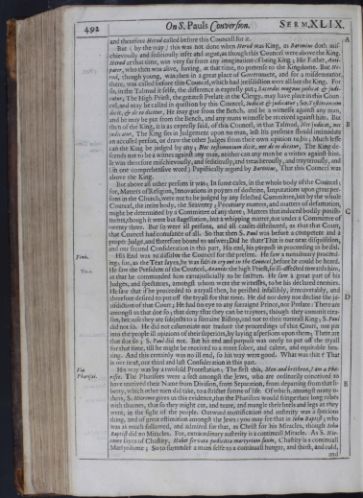 492
On S. Pauls Conversion.
Serm. XLVIX.
and therefore Herod called before this Councell for it.
492
On S. Pauls Conversion.
Serm. XLVIX.
and therefore Herod called before this Councell for it.
But (by the way) this was not done when Herod was King, as Baronius doth mis-
chievously and seditiously infer and argue, as though this Councel were above the King.
Herod at that time, was very far from any imagination of being King; His Father, Anti-
pater, who then was alive, having, at that time, no pretense to the Kingdome. But He-
rod, though young, was then in a great place of Government, and for a misdemeanor
there, was called before this Councel, which had jurisdiction over all but the King. For
so, in the Talmud it selfe, the difference is expresly put; Sacerdos magnus judicat & judi-
catur, The High Priest, the greatest Prelate in the Clergy, may have place in this Coun-
cel, and may be called in question by this Councel, Iudicat & judicatur; So, Testimonium
dicit, & de eo dicitur, He may goe from the Bench, and be a witnesse against any man,
and he may be put from the Bench, and any mans witnesse be received against him. But
then of the King, it is as expresly said, of this Councel, in that Talmud, Nec judicat, nec
judicatur, The King sits in Judgement upon no man, lest his presence should intimidate
an accused person, or draw the other Judges from their own opinion to his; Much lesse
can the King be judged by any; Nec testimonium dicit, nec de eo dicitur, The King de-
scends not to be a witnes against any man, neither can any man be a witnes against him.
It was therefore mischievously, and seditiously, and treacherously, and trayterously, and
(in one comprehensive word) Papistically argued by Baronius, That this Councel was
above the King.
But above all other persons it was; In some cases, in the whole body of the Councel;
for, Matters of Religion, Innovations in poynts of doctrine, Imputations upon great per-
sons in the Church, were not to be judged by any selected Committee, but by the whole
Councel, the intire body, the Seaventy; Pecuniary matters, and matters of defamation,
might be determined by a Committee of any three; Matters that induced bodily punish-
ments, though it were but flagellation, but a whipping matter, not under a Committee of
twenty three. But so were all persons, and all causes distributed, as that that Court,
that Councel had conusance of all. So that then S. Paul was before a competent and a
proper Judge, and therefore bound to answer; Did he that? That is our next disquisition,
and our second Consideration in this part, His end, his purpose in proceeding as he did.
His End was to dissolve the Councel for the present. He saw a tumultuary Finis. proceed-
ing; for, as the Text sayes, he was fain to cry out in the Councel, before he could be heard.
He saw the President of the Councel, Ver. 2. Ananias the high Priest, so ill-affected towards him,
as that he commanded him extrajudicially to be smitten. He saw a great part of his
Judges, and spectators, amongst whom were the witnesses, to be his declared enemies.
He saw that if he proceeded to a tryall then, he perished infallibly, irrecoverably, and
therefore desired to put off the tryall for that time. He did not deny nor decline the ju-
risdiction of that Court; He had no eye to any forraigne Prince, nor Prelate: There are
amongst us that doe so; that deny that they can be traytors, though they commit trea-
son, because they are subjects to a forraine Bishop, and not to their naturall King; S. Paul
did not so. He did not calumniate nor traduce the proceedings of that Court, nor put
into the people ill opinions of their superiors, by laying aspersions upon them; There are
that doe so; S. Paul did not. But his end and purpose was onely to put off the tryall
for that time, till he might be received to a more sober, and calme, and equitable hea-
ring. And this certainly was no ill end, so his way were good. What was that? That
is our next, our third and last Consideration in this part.
His way was by a twofold Protestation;Viæ.
Pharisæi. The first this, Men and brethren, I am a Pha-
risee. The Pharisees were a sect amongst the Jews, who are ordinarily conceived to
have received their Name from Division, from Separation, from departing from that li-
berty, which other men did take, to a stricter forme of life. Of which, amongst many o-
thers, S. Hierome gives us this evidence, that the Pharisees would fringe their long robes
with thornes, that so they might cut, and teare, and mangle their heels and legs as they
went, in the sight of the people. Outward mortification and austerity was a specious
thing, and of great estimation amongst the Jews: you may see that in Iohn Baptist; who
was as much followed, and admired for that, as Christ for his Miracles, though Iohn
Baptist did no Miracles. For, extraordinary austerity is a continuall Miracle. As S. Hie-
rome sayes of Chastity, Habet servata pudicitia martyrium suum, Chastity is a continuall
Martyrdome; So to surrender a mans selfe to a continuall hunger, and thirst, and cold, and
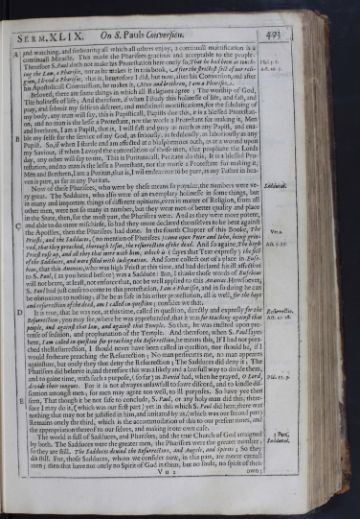 Serm. XLVIX.
On S. Pauls Conversion.
493
and watching, and forbearing all which all others enjoy, a continuall mortification is a
Serm. XLVIX.
On S. Pauls Conversion.
493
and watching, and forbearing all which all others enjoy, a continuall mortification is a
continuall Miracle. This made the Pharisees gracious and acceptable to the people:
Phil. 3.5.
Act. 26.5. Therefore S. Paul doth not make his Protestation here onely so, That he had been as touch-
ing the Law, a Pharisee, nor as he makes it in this book, After the strictest sect of our reli-
gion, I lived a Pharisee, that is, heretofore I did, but now, after his Conversion, and after
his Apostolicall Commission, he makes it, Men and brethren, I am a Pharisee.
Beloved, there are some things in which all Religions agree; The worship of God,
The holinesse of life; And therefore, if when I study this holinesse of life, and fast, and
pray, and submit my selfe to discreet, and medicinall mortifications, for the subduing of
my body, any man will say, this is Papisticall, Papists doe this, it is a blessed Protestati-
on, and no man is the lesse a Protestant, nor the worse a Protestant for making it, Men
and brethren, I am a Papist, that is, I will fast and pray as much as any Papist, and ena-
ble my selfe for the service of my God, as seriously, as sedulously, as laboriously as any
Papist. So, if when I startle and am affected at a blasphemous oath, as at a wound upon
my Saviour, if when I avoyd the conversation of those men, that prophane the Lords
day, any other will say to me, This is Puritanicall, Puritans do this, It is a blessed Pro-
testation, and no man is the lesse a Protestant, nor the worse a Protestant for making it,
Men and Brethren, I am a Puritan, that is, I wil endeavour to be pure, as my Father in hea-
ven is pure, as far as any Puritan.
Now of these Pharisees, who were by these means so popular, Sadducæi. the numbers were ve-
ry great. The Sadduces, who also were of an exemplary holinesse in some things, but
in many and important things of different opinions, even in matter of Religion, from all
other men, were not so many in number, but they were men of better quality and place
in the State, then, for the most part, the Pharisees were. And as they were more potent,
and able to do more mischiefe, so had they more declared themselves to be bent against
the Apostles, then the Pharisees had done. In the fourth Chapter of this Booke, Ver. 2. The
Priests, and the Sadduces, (no mention of Pharisees) came upon Peter and Iohn, being grie-
ved, that they preached, thorough Iesus, the resurrection of the dead. And so againe, Act. 5.17. The high
Priest rose up, and all they that were with him, which is (sayes that Text expresly) the sect
of the Sadduces, and were filled with indignation. And some collect out of a place in Euse-
bius, that this Ananias, who was high Priest at this time, and had declared his ill affection
to S. Paul, (as you heard before) was a Sadduce: But, I thinke those words of Eusebius
will not beare, at least, not enforce that, nor be well applied to this Ananias. Howsoever,
S. Paul had just cause to come to this protestation, I am a Pharisee, and in so doing he can
be obnoxious to nothing; if he be as safe in his other protestation, all is well, for the hope
and resurrection of the dead, am I called in question; consider we that.
It is true, that he was not, at this time, called in question, Resurrectio.
Act. 21.28. directly and expresly for the
Resurrection; you may see, where he was apprehended, that it was for teaching against that
people, and against that law, and against that Temple. So that, he was endited upon pre-
tense of sedition, and prophanation of the Temple. And therefore, when S. Paul sayes
here, I am called in question for preaching the Resurrection, he means this, If I had not prea-
ched the Resurrection, I should never have been called in question, nor should be, if I
would forbeare preaching the Resurrection; No man persecutes me, no man appeares
against me, but onely they that deny the Resurrection; The Sadduces did deny it; The
Pharisees did beleeve it; and therefore this was a likely and a lawfull way to divide them,
and to gaine time, with such a purpose, (so far) as David had, when he prayed, Psal. 55.9. O Lord,
divide their tongues. For it is not alwayes unlawfull to sowe discord, and to kindle dis-
sention amongst men; for men may agree too well, to ill purposes. So have yee then
seen, That though it be not safe to conclude, S. Paul, or any holy man did this, there-
fore I may do it, (which was our first part) yet in this which S. Paul did here, there was
nothing that may not be justified in him, and imitated by us, (which was our second part)
Remains onely the third, which is the accommodation of this to our present times, and
the appropriation thereof to our selves, and making it our own case.
The world is full of Sadduces, and Pharisees, and the true Church of God arraigned 3 Part.
Sadducæi.
by both. The Sadduces were the greater men, the Pharisees were the greater number;
so they are still. The Sadduces denied the Resurrection, and Angels, and Spirits; So they
do still. For, those Sadduces, whom we consider now, in this part, are meere carnall
men; men that have not onely no Spirit of God in them, but no soule, no spirit of their Vu2 own;
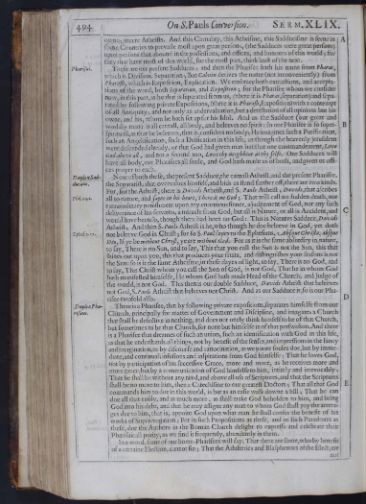 494
On S. Pauls Conversion.
Serm. XLVIX.
owne; meere Atheists. And this Carnality, this Atheisme, this Sadducisme is seene in
494
On S. Pauls Conversion.
Serm. XLVIX.
owne; meere Atheists. And this Carnality, this Atheisme, this Sadducisme is seene in
some Countries to prevaile most upon great persons, (the Sadduces were great persons)
upon persons that abound in the possessions, and offices, and honours of this world; for
they that have most of this world, for the most part, think least of the next.
These are our present Sadduces;Pharisæi. and then the Pharisee hath his name from Pharas,
which is Division, Separation; But Calvin derives the name (not inconveniently) from
Pharash, which is Exposition, Explication. We embrace both extractions, and accepta-
tions of the word, both Separation, and Exposition; for the Pharisee whom we consider
now, in this part, is he that is separated from us, (there it is Pharas, separation) and sepa-
rated by following private Expositions, (there it is Pharash, Exposition) with a contempt
of all Antiquity; and not only an undervaluation, but a detestation of all opinions but his
owne, and his, whom he hath set up for his Idol. And as the Sadduce (our great and
worldly man) is all carnall, all body, and beleeves no spirit: so our Pharisee is so super-
spirituall, as that he beleeves, that is, considers no body; He imagines such a Purification,
such an Angelification, such a Deification in this life, as though the heavenly Jerusalem
were descended already, or that God had given man but that one commandement, Love
God above all, and not a second too, Love thy neighbour as thy selfe. Our Sadduces will
have all body, our Pharisees all soule, and God hath made us of both, and given us offi-
ces proper to each.
Now of both these, Duplex Sad-
ducæus. the present Sadduce, the carnall Atheist, and the present Pharisee,
the Separatist, that overvalues himself, and bids us stand farther off, there are two kinds.
For, for the Atheist, there is Davids Atheist, and S. Pauls Atheist; Davids, that ascribes
all to nature, Psal. 14.2. and sayes in his heart, There is no God; That will call no sudden death, nor
extraordinary punishment upon any enormous sinner, a judgement of God, nor any such
deliverance of his servants, a miracle from God, but all is Nature, or all is Accident, and
would have been so, though there had been no God: This is Natures Sadduce, Davids
Atheist; And then S. Pauls Atheist is he, who though he doe beleeve in God, yet doth
not beleeve God in Christ;Ephes. 2.12. for so S. Paul sayes to the Ephesians, Absque Christo, absque
Deo, If ye be without Christ, ye are without God. For as it is the same absurdity in nature,
to say, There is no Sun, and to say, This that you call the Sun is not the Sun, this that
shines out upon you, this that produces your fruits, and distinguishes your seasons is not
the Sun: so is it the same Atheisme, in these dayes of light, to say, There is no God, and
to say, This Christ whom you call the Son of God, is not God, That he in whom God
hath manifested himselfe, He whom God hath made Head of the Church, and Judge of
the world, is not God. This then is our double Sadduce, Davids Atheist that beleeves
not God, S. Pauls Atheist that beleeves not Christ. And as our Sadduce is, so is our Pha-
risee twofold also.
There is a Pharisee, Duplex Pha-
risæus. that by following private expositions, separates himselfe from our
Church, principally for matter of Government and Discipline, and imagines a Church
that shall be defective in nothing, and does not onely think himself to be of that Church,
but sometimes to be that Church, for none but himselfe is of that perswasion. And there
is a Pharisee that dreames of such an union, such an identification with God in this life,
as that he understands all things, not by benefit of the senses, and impressions in the fancy
and imagination, or by discourse and ratiocination, as we poore soules doe, but by imme-
diate, and continuall infusions and inspirations from God himselfe; That he loves God,
not by participation of his successive Grace, more and more, as he receives more and
more grace, but by a communication of God himselfe to him, intirely and irrevocably;
That he shall be without any need, and above all use of Scriptures, and that the Scriptures
shall be no more to him, then a Catechisme to our greatest Doctors; That all that God
commands him to doe in this world, is but as an easie walk downe a hill; That he can
doe all that easily, and as much more, as shall make God beholden to him, and bring
God into his debt, and that he may assigne any man to whom God shall pay the arrera-
ges due to him, that is, appoint God upon what man he shall confer the benefit of his
works of Supererogation; For in such Propositions as these, and in such Paradoxes as
these, doe the Authors in the Roman Church delight to expresse and celebrate their
Pharisaicall purity, as we find it frequently, abundantly in them.
In a word, some of our home-Pharisees will say, That there are some, who by benefit
of a certaine Election, cannot sin; That the Adulteries and Blasphemies of the Elect, are not
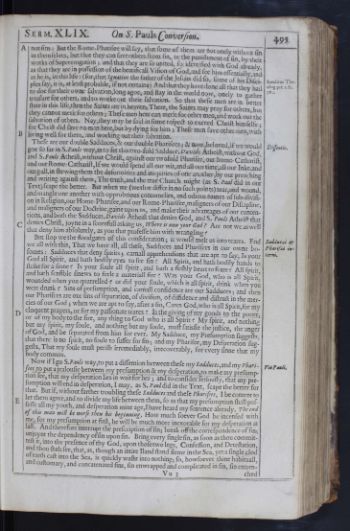 Serm. XLVIX.
On S. Pauls Conversion.
495
not sins: But the Rome-Pharisee will say, that some of them are not onely without sin
Serm. XLVIX.
On S. Pauls Conversion.
495
not sins: But the Rome-Pharisee will say, that some of them are not onely without sin
in themselves, but that they can save others from sin, or the punishment of sin, by their
works of Supererogation; and that they are so united, so identified with God already,
as that they are in possession of the beatificall Vision of God, and see him essentially, and
as he is, in this life: (for, that Ignatius the father of the Jesuits did so, Sandæus The-
olog. par. 1. fo.
760. some of his Disci-
ples say, it is, at least probable, if not certaine) And that they have done all that they had
to doe for their owne salvation, long agoe, and stay in the world now, onely to gather
treasure for others, and to worke out their salvation. So that these men are in better
state in this life, then the Saints are in heaven; There, the Saints may pray for others, but
they cannot merit for others; These men here can merit for other men, and work out the
salvation of others. Nay, they may be said in some respect to exceed Christ himselfe;
for Christ did save no man here, but by dying for him; These men save other men, with
living well for them, and working out their salvation.
These are our double Sadduces, & our double Pharisees; & now, beloved, Dissentio. if we would
goe so far in S. Pauls way, as to set this two-fold Sadduce, Davids Atheist, without God,
and S. Pauls Atheist, without Christ, against our twofold Pharisee, our home-Catharist,
and our Rome-Catharist, If we would spend all our wit, and all our time, all our Inke, and
our gall, in shewing them the deformities and iniquities of one another, by our preaching
and writing against them, The truth, and the true Church might (as S. Paul did in our
Text) scape the better. But when we (we that differ in no such points) tear, and wound,
and mangle one another with opprobrious contumelies, and odious names of sub-divisi-
on in Religion, our Home-Pharisee, and our Rome-Pharisee, maligners of our Discipline,
and maligners of our Doctrine, gaine upon nsus, and make their advantages of our conten-
tions, and both the Sadduces, Davids Atheist that denies God, and S. Pauls Atheist that
denies Christ, joyne in a scornfull asking us, Where is now your God? Are not we as well
that deny him absolutely, as you that professe him with wrangling?
But stop we the floodgates of this consideration; it would melt us into teares.Sadducæi &
Pharisæi in-
terni. End
we all with this, That we have all, all these, Sadduces and Pharisees in our owne bo-
somes: Sadduces that deny spirits; carnall apprehensions that are apt to say, Is your
God all Spirit, and hath bodily eyes to see sin? All Spirit, and hath bodily hands to
strike for a sinne? Is your soule all spirit, and hath a fleshly heart to feare? All spirit,
and hath sensible sinews to feele a materiall fire? Was your God, who is all Spirit,
wounded when you quarrelled? or did your soule, which is all spirit, drink when you
were drunk? Sins of presumption, and carnall confidence are our Sadduces; and then
our Pharisees are our sins of separation, of division, of diffidence and distrust in the mer-
cies of our God; when we are apt to say, after a sin, Cares God, who is all Spirit, for my
eloquent prayers, or for my passionate teares? Is the giving of my goods to the poore,
or of my body to the fire, any thing to God who is all Spirit? My spirit, and nothing
but my spirit, my soule, and nothing but my soule, must satisfie the justice, the anger
of God, and be separated from him for ever. My Sadduce, my Presumption suggests,
that there is no spirit, no soule to suffer for sin; and my Pharisee, my Desperation sug-
gests, That my soule must perish irremediably, irrecoverably, for every sinne that my
body commits.
Now if I go S. Pauls way, to put a dissention between these my Sadduces, and my Phari-
sees, Via Pauli. to put a jealousie between my presumption & my desperation, to make my presump-
tion see, that my desperation lies in wait for her; and to consider seriously, that my pre-
sumption will end in desperation, I may, as S. Paul did in the Text, scape the better for
that. But if, without farther troubling these Sadduces and these Pharisees, I be content to
let them agree, and to divide my life between them, so as that my presumption shall pos-
sesse all my youth, and desperation mine age, I have heard my sentence already, The end
of this man will be worse then his beginning, How much soever God be incensed with
me, for my presumption at first, he will be much more inexorable for my desperation at
last. And therefore interrupt the prescription of sin; break off the correspondence of sin;
unjoynt the dependency of sin upon sin. Bring every single sin, as soon as thou commit-
test it, into the presence of thy God, upon those two legs, Confession, and Detestation,
and thou shalt see, that, as, though an intire Iland stand firme in the Sea, yet a single clod
of earth cast into the Sea, is quickly washt into nothing; so, howsoever thine habituall,
and customary, and concatenated sins, sin enwrapped and complicated in sin, sin entren-
Vu3 ched
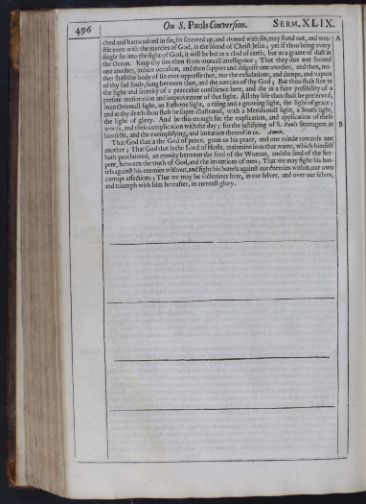 496
On S. Pauls Conversion.
Serm. XLVIX.
ched and barricadoed in sin, sin screwed up, and riveted with sin, may stand out, and wra-
496
On S. Pauls Conversion.
Serm. XLVIX.
ched and barricadoed in sin, sin screwed up, and riveted with sin, may stand out, and wra-stle even with the mercies of God, in the blood of Christ Jesus; yet if thou bring every
single sin into the sight of God, it will be but as a clod of earth, but as a graine of dust in
the Ocean. Keep thy sins then from mutuall intelligence; That they doe not second
one another, induce occasion, and then support and disguise one another, and then, nei-
ther shall the body of sin ever oppresse thee, nor the exhalations, and damps, and vapors
of thy sad soule, hang between thee, and the mercies of thy God; But thou shalt live in
the light and serenity of a peaceable conscience here, and die in a faire possibility of a
present melioration and improvement of that light. All thy life thou shalt be preserved,
in an Orientall light, an Easterne light, a rising and a growing light, the light of grace;
and at thy death thou shalt be super-illustrated, with a Meridionall light, a South light,
the light of glory. And be this enough for the explication, and application of these
words, and their complication with the day; for the justifying of S. Pauls Stratagem in
himselfe, and the exemplifying, and imitation thereof in us. Amen.
That God that is the God of peace, grant us his peace, and one minde towards one
another; That God that is the Lord of Hosts, maintaine in us that warre, which himself
hath proclaimed, an enmity between the seed of the Woman, and the seed of the Ser-
pent, between the truth of God, and the inventions of men; That we may fight his bat-
tels against his enemies without, and fight his battels against our enemies within, our own
corrupt affections; That we may be victorious here, in our selves, and over our selves,
and triumph with him hereafter, in eternall glory.
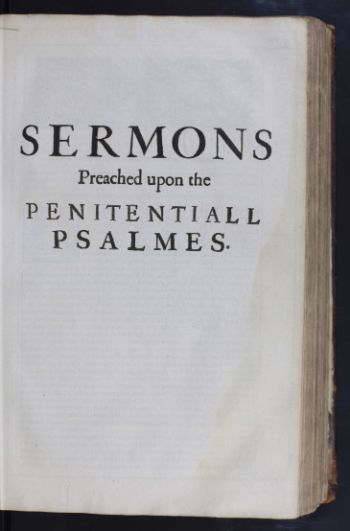
SERMONS
Preached upon the
PENITENTIALL
PSALMES.
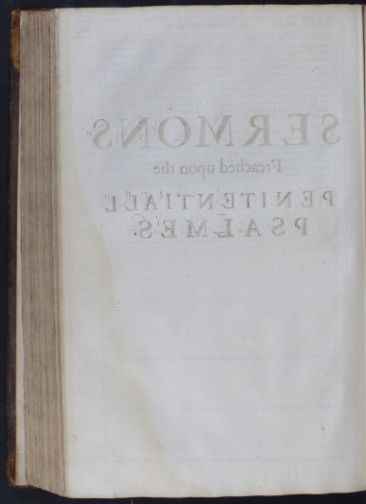
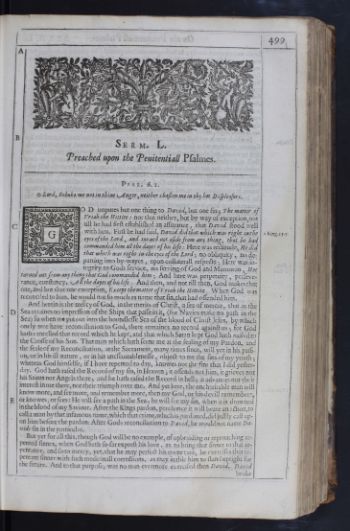 499
499
Serm. L.
Preached upon the Penitentiall Psalmes.
Psal. 6.1.
O Lord, Rebuke me not in thine Anger, neither chasten me in thy hot Displeasure.
GODGod imputes but one thing to David, but one sin; The matter of
Vriah the Hittite: nor that neither, but by way of exception, not
till he had first established an assurance, that David stood well
with him. First he had said, 1 King. 15.5. David did that which was right in the
eyes of the Lord, and turned not aside from any thing, that he had
commanded him all the dayes of his life: Here was rectitude, He did
that which was right in the eyes of the Lord; no obliquity, no de-
parting into by-wayes, upon collaterall respects; Here was in-
tegrity to Gods service, no serving of God and Mammon, Hee
turned not from any thing that God commanded him; And here was perpetuity, perseve-
rance, constancy, All the dayes of his life: And then, and not till then, God makes that
one, and but that one exception, Except the matter of Vriah the Hittite. When God was
reconciled to him, he would not so much as name that sin, that had offended him.
And herein is the mercy of God, in the merits of Christ, a sea of mercie, that as the
Sea retaines no impression of the Ships that passe in it, (for Navies make no path in the
Sea) so when we put out into the boundlesse Sea of the blood of Christ Jesus, by which
onely wee have reconciliation to God, there remaines no record against us; for God
hath cancelled that record which he kept, and that which Satan kept God hath nailed to
the Crosse of his Son. That man which hath seene me at the sealing of my Pardon, and
the seale of my Reconciliation, at the Sacrament, many times since, will yet in his passi-
on, or in his ill nature, or in his uncharitablenesse, object to me the sins of my youth;
whereas God himselfe, if I have repented to day, knowes not the sins that I did yester-
day. God hath rased the Record of my sin, in Heaven; it offends not him, it grieves not
his Saints nor Angels there; and he hath rased the Record in hell; it advances not their
interest in me there, nor their triumph over me. And yet here, the uncharitable man will
know more, and see more, and remember more, then my God, or his devill remembers,
or knowes, or sees: He will see a path in the Sea; he will see my sin, when it is drowned
in the blood of my Saviour. After the Kings pardon, perchance it will beare an action, to
call a man by that infamous name, which that crime, which is pardoned, did justly cast up-
on him before the pardon: After Gods reconciliation to David, he would not name Da-
vids sin in the particular.
But yet for all this, though God will be no example, of upbraiding or reproaching re-
pented sinnes, when God hath so far exprest his love, as to bring that sinner to that re-
pentance, and so to mercy, yet, that he may perfect his owne care, he exercises that re-
pentant sinner with such medicinall corrections, as may inable him to stand upright for
the future. And to that purpose, was no man evermore exercised then David. David broke
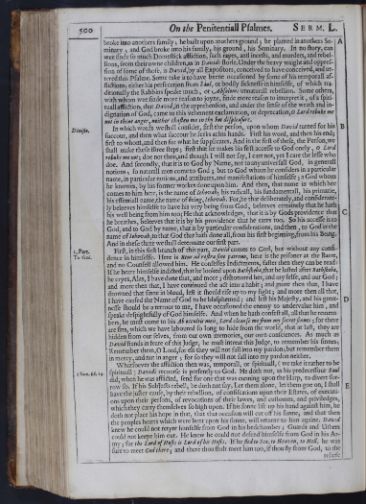 500
On the Penitentiall Psalmes.
Serm. L.
broke into anothers family; he built upon anothers ground; he planted in anothers Se-
500
On the Penitentiall Psalmes.
Serm. L.
broke into anothers family; he built upon anothers ground; he planted in anothers Se-minary; and God broke into his family, his ground, his Seminary. In no story, can
wee finde so much Domestick affliction, such rapes, and incests, and murders, and rebel-
lions, from their owne children, as in Davids storie. Under the heavy waight and oppres-
sion of some of those, is David, by all Expositors, conceived to have conceived, and ut-
tered this Psalme. Some take it to have beene occasioned by some of his temporall af-
flictions; either his persecution from Saul, or bodily sicknesse in himselfe, of which tra-
ditionally the Rabbins speake much, or Absoloms unnaturall rebellion. Some others,
with whom wee finde more reason to joyne, finde more reason to interpret it, of a spiri-
tuall affliction; that David, in the apprehension, and under the sense of the wrath and in-
dignation of God, came to this vehement exclamation, or deprecation, O Lord rebuke me
not in thine anger, neither chasten me in thy hot displeasure.
In which words we shall consider, Divisio. first the person, upon whom David turned for his
succour, and then what succour he seeks at his hands. First his word, and then his end;
first to whom, and then for what he supplicates. And in the first of these, the Person, we
shall make these three steps; first that he makes his first accesse to God onely, O Lord
rebuke me not; doe not thou, and though I will not say, I care not, yet I care the lesse who
doe. And secondly, that it is to God by Name, not to any universall God, in generall
notions; so naturall men come to God; but to God whom he considers in a particular
name, in particular notions, and attributes, and manifestations of himselfe; a God whom
he knowes, by his former workes done upon him. And then, that name in which hee
comes to him here, is the name of Iehovah; his radicall, his fundamentall, his primarie,
his essentiall name, the name of being, Iehovah. For, he that deliberately, and considerate-
ly beleeves himselfe to have his very being from God, beleeves certainely that he hath
his well being from him too; He that acknowledges, that it is by Gods providence that
he breathes, beleeves that it is by his providence that he eates too. So his accesse is to
God, and to God by name, that is by particular considerations, and then, to God in the
name of Iehovah, to that God that hath done all, from his first beginning, from his Being.
And in these three we shall determine our first part.
First, 1. Part.
To God. in this first branch of this part, David comes to God, but without any confi-
dence in himselfe. Here is Reus ad rostra sine patrono, here is the prisoner at the Barre,
and no Counsell allowed him. He confesses Indictments, faster then they can be read:
If he heare himselfe indicted, that he looked upon Bathsheba, that he lusted after Bathsheba,
he cryes, Alas, I have done that, and more; dishonored her, and my selfe, and our God;
and more then that, I have continued the act into a habit; and more then that, I have
drowned that sinne in bloud, lest it should rise up to my sight; and more then all that,
I have caused the Name of God to be blasphemed; and lest his Majesty, and his great-
nesse should be a terrour to me, I have occasioned the enemy to undervalue him, and
speake despightfully of God himselfe. And when he hath confest all, all that he remem-
bers, he must come to his Ab occultis meis, Lord cleanse me from my secret sinnes; for there
are sins, which we have laboured so long to hide from the world, that at last, they are
hidden from our selves, from our own memories, our own consciences. As much as
David stands in feare of this Judge, he must intreat this Judge, to remember his sinnes;
Remember them, O Lord, for els they will not fall into my pardon; but remember them
in mercy, and not in anger; for so they will not fall into my pardon neither.
Whatsoever the affliction then was, temporall, or spirituall, (we take it rather to be
spirituall) Davids recourse is presently to God.1 Sam. 16.14. He doth not, as his predecessour Saul
did, when he was afflicted, send for one that was cunning upon the Harp, to divert sor-
row so. If his Subjects rebell, he doth not say, Let them alone, let them goe on, I shall
have the juster cause, by their rebellion, of confiscations upon their Estates, of executi-
ons upon their persons, of revocations of their lawes, and customes, and priviledges,
which they carry themselves so high upon. If his sonne lift up his hand against him, he
doth not place his hope in that, that that occasion will cut off his sonne, and that then
the peoples hearts which were bent upon his sonne, will returne to him againe. David
knew he could not retyre himselfe from God in his bedchamber; Guards and Ushers
could not keepe him out. He knew he could not defend himselfe from God in his Ar-
my; for the Lord of Hosts is Lord of his Hosts. If he fled to Sea, to Heaven, to Hell, he was
sure to meet God there; and there thou shalt meet him too, if thou fly from God, to the reliefe
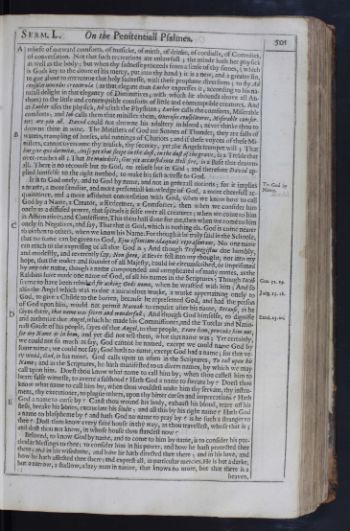 Serm. L.
On the Penitentiall Psalmes.
501
reliefe of outward comforts, of musicke, of mirth, of drinke, of cordialls, of Comedies,
Serm. L.
On the Penitentiall Psalmes.
501
reliefe of outward comforts, of musicke, of mirth, of drinke, of cordialls, of Comedies,
of conversation. Not that such recreations are unlawfull; the minde hath her physick
as well as the body; but when thy sadnesse proceeds from a sense of thy sinnes, (which
is Gods key to the doore of his mercy, put into thy hand) it is a new, and a greater sin,
to goe about to overcome that holy sadnesse, with these prophane diversions; to fly Ad
consolatiunculas creaturulæ (as that elegant man Luther expresses it, according to his na-
turall delight in that elegancy of Diminutives, with which he abounds above all Au-
thors) to the little and contemptible comforts of little and contemptible creatures. And
as Luther uses the physick, Iob useth the Physitian; Luther calls the comforts, Miserable
comforts; and Iob calls them that minister them, Onerosos consolatores, Miserable comfor-
ters are you all. David could not drowne his adultery in blood; never thinke thou to
drowne thine in wine. The Ministers of God are Sonnes of Thunder, they are falls of
waters, trampling of horses, and runnings of Chariots; and if these voyces of these Mi-
nisters, cannot overcome thy musick, thy security, yet the Angels trumpet will; That
Surgite qui dormitis, Arise yee that sleepe in the dust, in the dust of the grave, is a Treble that
over-reaches all; That Ite maledicti, Goe yee accursed into Hell fire, is a Base that drowns
all. There is no recourse but to God, no reliefe but in God; and therefore David ap-
plied himselfe to the right method, to make his first accesse to God.
It is to God onely, and to God by name, and not in generall notions;To God by
Name. for it implies
a nearer, a more familiar, and more presentiall knowledge of God, a more cheerfull ac-
quaintance, and a more assiduous conversation with God, when we know how to call
God by a Name, a Creator, a Redeemer, a Comforter, then when we consider him
onely as a diffused power, that spreads it selfe over all creatures; when we come to him
in Affirmatives, and Confessions, This thou hast done for me, then when we come to him
onely in Negatives, and say, That that is God, which is nothing els. God is come nearer
to us then to others, when we know his Name. For though it be truly said in the Schoole,
that no name can be given to God, Ejus essentiam adæquatè repræsentans, No one name
can reach to the expressing of all that God is; And though Trismegistus doe humbly,
and modestly, and reverently say, Non spero, it never fell into my thought, nor into my
hope, that the maker and founder of all Majesty, could be circumscribed, or imprisoned
by any one name, though a name compounded and complicated of many names, as the
Rabbins have made one name of God, of all his names in the Scriptures;Gen. 32.29. Though Iacob
seeme to have been rebuked for asking Gods name, when he wrastled with him; And so
also the Angel which was to doe a miraculous worke, Judg. 13.18. a worke appertaining onely to
God, to give a Childe to the barren, because he represented God, and had the person
of God upon him, would not permit Manoah to enquire after his name, Because, as he
sayes there, that name was secret and wonderfull; And though God himselfe, Exod. 23.20. to dignifie
and authorize that Angel, which he made his Commissioner, and the Tutelar and Natio-
nall Guide of his people, sayes of that Angel, to that people, Feare him, provoke him not,
for my Name is in him, and yet did not tell them, what that name was; Yet certainly,
we could not so much as say, God cannot be named, except we could name God by
some name; we could not say, God hath no name, except God had a name; for that ve-
ry word, God, is his name. God calls upon us often in the Scriptures, To call upon his
Name; and in the Scriptures, he hath manifested to us divers names, by which we may
call upon him. Doest thou know what name to call him by, when thou callest him to
beare false witnesse, to averre a falshood? Hath God a name to sweare by? Doest thou
know what name to call him by, when thou wouldest make him thy servant, thy instru-
ment, thy executioner, to plague others, upon thy bitter curses and imprecations? Hath
God a name to curse by? Canst thou wound his body, exhaust his bloud, teare off his
flesh, breake his bones, excruciate his soule; and all this by his right name? Hath God
a name to blaspheme by? and hath God no name to pray by? is he such a stranger to
thee? Dost thou know every faire house in thy way, as thou travellest, whose that is;
and dost thou not know, in whose house thou standest now?
Beloved, to know God by name, and to come to him by name, is to consider his par-
ticular blessings to thee; to consider him in his power, and how he hath protected thee
there; and in his wisedome, and how he hath directed thee there; and in his love, and
how he hath affected thee there; and exprest all, in particular mercies. He is but a darke,
but a narrow, a shallow, a lazy man in nature, that knows no more, but that there is a heaven,
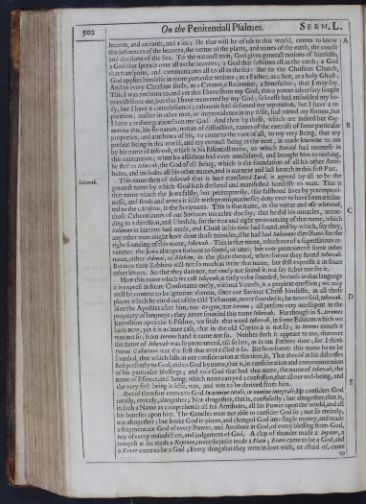 502
On the Penitentiall Psalmes.
Serm. L.
heaven, and an earth, and a sea; He that will be of use in this world, comes to know
502
On the Penitentiall Psalmes.
Serm. L.
heaven, and an earth, and a sea; He that will be of use in this world, comes to know
the influences of the heavens, the vertue of the plants, and mines of the earth, the course
and divisions of the Sea. To the naturall man, God gives generall notions of himselfe;
a God that spreads over all as the heavens; a God that sustaines all as the earth; a God
that transports, and communicates all to all as the sea: But to the Christian Church,
God applies himselfe in more particular notions; as a Father, as a Son, as a holy Ghost;
And to every Christian soule, as a Creator, a Redeemer, a Benefactor; that I may say,
This I was not born to, and yet this I have from my God; this a potent adversary sought
to evict from me, but this I have recovered by my God; sicknesse had enfeebled my bo-
dy, but I have a convalescence; calumnie had defamed my reputation, but I have a re-
paration; malice in other men, or improvidence in my selfe, had ruined my fortune, but
I have a redintegration from my God. And then by these, which are indeed but Cog-
nomina Dei, his sir-names, names of distinction, names of the exercise of some particular
properties, and attributes of his, to come to the root of all, to my very Being, that my
present Being in this world, and my eternall Being in the next, is made knowne to me
by his name of Iehovah, which is his Essentiall name, to which David had recourse in
this exinanition; when his affliction had even annihilated, and brought him to nothing,
he fled to Iehovah, the God of all Being, which is the foundation of all his other Attri-
butes, and includes all his other names, and is our next and last branch in this first Part.
This name then of Iehovah that is here translated Lord, Iehovah. is agreed by all to be the
greatest name by which God hath declared and manifested himselfe to man. This is
that name which the Jews falsly, but peremptorily, (for falshood lives by peremptori-
nesse, and feeds and armes it selfe with peremptorinesse) deny ever to have been attribu-
ted to the Messias, in the Scriptures. This is that name, in the vertue and use whereof,
those Calumniators of our Saviours miracles doe say, that he did his miracles, accor-
ding to a direction, and schedule, for the true and right pronouncing of that name, which
Solomon in his time had made, and Christ in his time had found, and by which, say they,
any other man might have done those miracles, if he had had Solomons directions for the
right sounding of this name, Iehovah. This is that name, which out of a superstitious re-
verence the Jews alwayes forbore to sound, or utter, but ever pronounced some other
name, either Adonai, or Elohim, in the place thereof, wheresoever they found Iehovah.
But now their Rabbins will not so much as write that name, but still expresse it in foure
other letters. So that they dare not, not onely not sound it, not say it, but not see it.
How this name which we call Iehovah, is truly to be sounded, because in that language
it is exprest in foure Consonants onely, without Vowels, is a perplext question; we may
well be content to be ignorant therein, since our Saviour Christ himselfe, in all those
places which he cited out of the Old Testament, never sounded it; he never said, Iehovah.
Nor the Apostles after him, nor Origen, nor Ierome; all persons very intelligent in the
propriety of language; they never sounded this name Iehovah. For though in S. Ieromes
Exposition upon the 8. Psalme, we finde that word Iehovah, in some Editions which we
have now, yet it is a cleare case, that in the old Copies it is not so; in Ieroms mouth it
was not so; from Ieroms hand it came not so. Neither doth it appeare to me, that ever
the name of Iehovah was so pronounced, till so late, as in our Fathers time; for I think
Petrus Gallatinus was the first that ever called it so. But howsoever this name be to be
sounded, that which falls in our consideration at this time, is, That David in his distresses
fled presently to God, and to God by name, that is, in consideration and commemoration
of his particular blessings; and to a God that had that name, the name of Iehovah, the
name of Essence, and Being, which name carryed a confession, that all our wel-being, and
the very first being it selfe, was, and was to be derived from him.
David therefore comes to God In nomine totali; in nomine integrali; He considers God
totally, entirely, altogether; Not altogether, that is, confusedly; but altogether, that is,
in such a Name as comprehends all his Attributes, all his Power upon the world, and all
his benefits upon him. The Gentiles were not able to consider God so; not so entirely,
not altogether; but broke God in pieces, and changed God into single money, and made
a fragmentarie God of every Power, and Attribute in God, of every blessing from God,
nay of every malediction, and judgement of God. A clap of thunder made a Iupiter, a
tempest at sea made a Neptune, an earthquake made a Pluto; Feare came to be a God, and
a Fever came to be a God; Every thing that they were in love with, or afraid of, came to
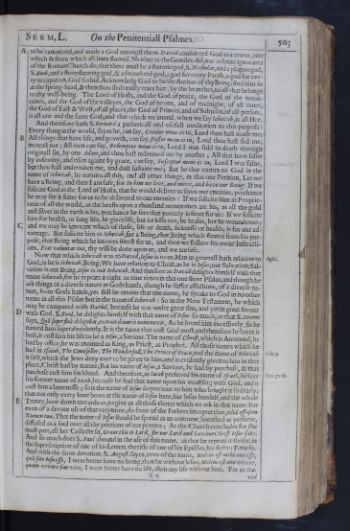 Serm. L.
On the Penitentiall Psalmes.
503
to be canonized, and made a God amongst them. David considered God as a center, into
Serm. L.
On the Penitentiall Psalmes.
503
to be canonized, and made a God amongst them. David considered God as a center, into
which & from which all lines flowed. Neither as the Gentiles did, nor as some ignorants
of the Roman Church do, that there must be a stormie god, S. Nicholas, and a plaguie god,
S. Rook, and a sheepshearing god, & a swineherd god, a god for every Parish, a god for eve-
ry occupation, God forbid. Acknowledg God to be the Author of thy Being; find him so
at the spring-head, & then thou shalt easily trace him, by the branches, to all that belongs
to thy well-being. The Lord of Hosts, and the God of peace, the God of the moun-
taines, and the God of the valleyes, the God of noone, and of midnight, of all times,
the God of East & West, of all places, the God of Princes, and of Subjects, of all persons,
is all one and the same God; and that which we intend, when we say Iehovah, is all Hee.
And therefore hath S. Bernard a patheticall and usefull meditation to this purpose:
Every thing in the world, sayes he, can say, Creator meus es tu, Lord thou hast made me;
All things that have life, and growth, can say, Pastor meus es tu, Lord thou hast fed me,
increast me; All men can say, Redemptor meus es tu, Lord I was sold to death through
originall sin, by one Adam, and thou hast redeemed me by another; All that have falne
by infirmity, and risen againe by grace, can say, Susceptor meus es tu, Lord I was falne,
but thou hast undertaken me, and dost sustaine me; But he that comes to God in the
name of Iehovah, he meanes all this, and all other things, in this one Petition, Let me
have a Being, and then I am safe, for In him we live, and move, and have our Being. If we
solicite God as the Lord of Hosts, that he would deliver us from our enemies, perchance
he may see it fitter for us to be delivered to our enemies: If we solicite him as Proprie-
tarie of all the world, as the beasts upon a thousand mountaines are his, as all the gold
and silver in the earth is his, perchance he sees that poverty is fitter for us: If we solicite
him for health, or long life, he gives life, but he kills too, he heales, but he wounds too;
and we may be ignorant which of these, life or death, sicknesse or health, is for our ad-
vantage. But solicite him as Iehovah, for a Being, that Being which flowes from his pur-
pose, that Being which he knowes fittest for us, and then we follow his owne Instructi-
ons, Fiat voluntas tua, thy will be done upon us, and we are safe.
Now that which Iehovah was to David, Iesus is to us.Iesus. Man in generall hath relation to
God, as he is Iehovah, Being; We have relation to Christ, as he is Iesus, our Salvation; Sal-
vation is our Being, Iesus is our Iehovah. And therfore as David delights himself with that
name Iehovah, for he repeats it eight or nine times in this one short Psalm, and though he
ask things of a diverse nature at Gods hands, though he suffer afflictions, of a diverse na-
ture, from Gods hands, yet still he retains that one name, he speaks to God in no other
name in all this Psalm but in the name of Iehovah: So in the New Testament, he which
may be compared with David, because he was under great sins, and yet in great favour
with God, S. Paul, he delights himself with that name of Iesus so much, as that S. Ierome
says, Quē superfluè diligebat, extraordinariè nominavit, As he loved him excessively, so he
named him superabundantly. It is the name that cost God most, and therefore he loves it
best; it cost him his life to be a Iesus, a Saviour. The name of Christ, which is Anointed, he
had by office; he was anointed as King, as Priest, as Prophet. All those names which he
had in Isaiah, The Counsellor, The Wonderfull, The Prince of Peace, Esay 9. and the name of Iehovah
it self, which the Jews deny ever to be given to him, and is evidently given to him in that
place, Christ had by nature; But his name of Iesus, a Saviour, he had by purchase, & that
purchase cost him his bloud. And therefore, as Iacob preferred his name of Israel, Gen. 32.28. before
his former name of Iacob, because he had that name upon his wrastling with God, and it
cost him a lamenesse; so is the name of Iesus so precious to him who bought it so dearly,
that not only every knee bows at the name of Iesus here, but Jesus himself, and the whole
Trinity, bow down towards us, to give us all those things which we ask in that name. For
even of a devout use of that veryname, do some of the Fathers interpret that, Oleū effusum
Nomen tuü, That the name of Iesus should be spread as an ointment, breathed as perfume,
diffused as a soul over all the petitions of our prayers; As the Church concludes for the
most part, all her Collects so, Grant this O Lord, for our Lord and Saviour Christ Iesus sake.
And so much does S. Paul abound in the use of this name, as that he repeats it thrice, in
the superscription of one of his Letters the title of one of his Epistles, his first to Timothy.
And with the same devotion, S. August. sayes, even of the name, Melius est mihi non esse,
quā sine Iesu esse, I were better have no being, then be without Jesus; Melius est non vivere,
quam vivere sine vita, I were better have no life, then any life without him. For as Da-
Xx vid
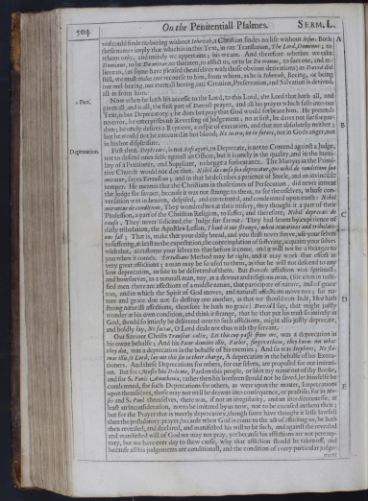 504
On the Penitentiall Psalmes.
Serm. L.
vid could finde no beeing without Iehovah, a Christian findes no life without Iesus. Both
504
On the Penitentiall Psalmes.
Serm. L.
vid could finde no beeing without Iehovah, a Christian findes no life without Iesus. Both
these names imply that which is in this Text, in our Translation, The Lord, Dominus; to
whom only, and intirely we appertaine; his we are. And therefore whether we take
Dominus, to be Do minas, to threaten, to afflict us, or to be Do manus, to succour, and re-
lieve us, (as some have pleased themselves with those obvious derivations) as David did
still, we must make our recourse to him, from whom, as he is Iehovah, Beeing, or being
our wel-beeing, our eternall beeing, our Creation, Preservation, and Salvation is derived;
all is from him.
Now when he hath his accesse to the Lord, 2 Part. to this Lord, the Lord that hath all, and
gives all, and is all, the first part of Davids prayer, and all his prayer which falls into our
Text, is but Deprecatory; he does but pray that God would forbeare him. He pretends
no error, he enterprises no Reversing of Judgement; no at first, he dares not sue for par-
don; he onely desires a Reprieve, a respit of execution, and that not absolutely neither;
but he would not be executed in hot blood; Ne in ira, ne in furore, not in Gods anger, not
in his hot displeasure.
First then, Deprecation. Deprecari, is not Refragari, to Deprecate, is not to Contend against a Judge,
nor to defend ones selfe against an Officer, but it is onely in the quality, and in the humi-
lity of a Petitioner, and Suppliant, to begge a forbearance. The Martyrs in the Primi-
tive Church would not doe that. Nihil de causa sua deprecatur, qui nihil de conditione sua
miratur, sayes Tertullian; and in that he describes a patience of Steele, and an invincible
temper. He meanes that the Christians in those times of Persecution, did never intreat
the Judge for favour, because it was not strange to them, to see themselves, whose con-
versation was in heaven, despised, and contemned, and condemned upon earth: Nihil
mirantur de conditione, They wondred not at their misery, they thought it a part of their
Profession, a part of the Christian Religion, to suffer, and therefore, Nihil deprecati de
causa, They never solicited the Judge for favour. They had learnt by experience of
daily tribulation, the Apostles Lesson, Think it not strange, when tentations and tribulati-
ons fall; That is, make that your daily bread, and you shall never sterve, use your selves
to suffering, at least to the expectation, the contemplation of suffering, acquaint your selves
with that, accustome your selves to that before it come, and it will not be a stranger to
you when it comes. Tertullians Method may be right, and it may work that effect in
very great afflictions; a man may be so used to them, as that he will not descend to any
low deprecation, or sute to be delivered of them. But Davids affliction was spirituall;
and howsoever, as a naturall man, nay; as a devout and religious man, (for even in recti-
fied men there are affections of a middle nature, that participate of nature, and of grace
too, and in which the Spirit of God moves, and naturall affections move too; for na-
ture and grace doe not so destroy one another, as that we should conclude, Hee hath
strong naturall affections, therefore he hath no grace) David I say, that might justly
wonder at his own condition, and think it strange, that he that put his trust so intirely in
God, should so intirely be delivered over to such afflictions, might also justly deprecate,
and boldly say, Ne facias, O Lord deale not thus with thy servant.
Our Saviour Christs Transeat calix, Let this cup passe from me, was a deprecation in
his owne behalfe; And his Pater dimitte illis, Father, forgive them, they know not what
they doe, was a deprecation in the behalfe of his enemies; And so was Stephens, Ne sta-
tuas illis, O Lord, lay not this sin to their charge, A deprecation in the behalfe of his Execu-
tioners. And these Deprecations for others, for our selves, are proposed for our imitati-
on. But for Moses his Dele me, Pardon this people, or blot my name out of thy Booke,
and for S. Pauls Anathema, rather then his brethren should not be saved, let himselfe be
condemned, for such Deprecations for others, as were upon the matter, Imprecations
upon themselves, those may not well be drawne into consequence, or practise; for in Mo-
ses and S. Paul themselves, there was, if not an irregularity, and an inordinatenesse, at
least an inconsideration, not to be imitated by us now, not to be excused in them then;
but for the Prayer that is meerly deprecatory, though some have thought it lesse lawfull
then the postulatory prayer, because when God is come to the act of afflicting us, he hath
then revealed, and declared, and manifested his will to be such, and against the revealed
and manifested will of God we may not pray, yet because his afflictions are not peremp-
tory, but we have everevery day to shew cause, why that affliction should be taken off, and
because all his judgements are conditionall, and the condition of every particular judge ment
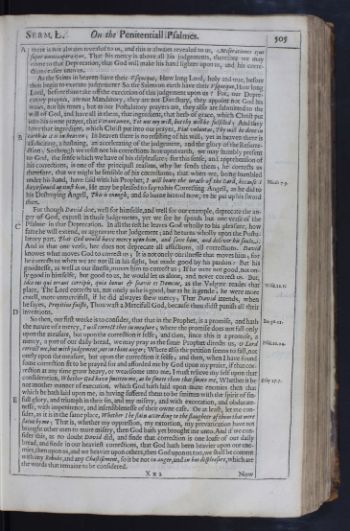 Serm. L.
On the Penitentiall Psalmes.
505
ment is not alwaies revealed to us, and this is alwaies revealed to us, Miserationes ejus
Serm. L.
On the Penitentiall Psalmes.
505
ment is not alwaies revealed to us, and this is alwaies revealed to us, Miserationes ejus
super omnia opera ejus, That his mercy is above all his judgements, therefore we may
come to that Deprecation, that God will make his hand lighter upon us, and his corre-
ctions easier unto us.
As the Saints in heaven have their Vsquequo, How long Lord, holy and true, before
thou begin to execute judgement? So the Saints on earth have their Vsquequo, How long
Lord, before thou take off the execution of this judgement upon us? For, our Depre-
catory prayers, are not Mandatory, they are not Directory, they appoint not God his
waies, nor his times; but as our Postulatory prayers are, they also are submitted to the
will of God, and have all in them, that ingredient, that herb of grace, which Christ put
into his owne prayer, that Veruntamen, Yet not my will, but thy will be fulfilled; And they
have that ingredient, which Christ put into our prayer, Fiat voluntas, Thy will be done in
earth as it is in heaven; In heaven there is no resisting of his will; yet in heaven there is
a soliciting, a hastning, an accelerating of the judgement, and the glory of the Resurre-
ction; So though we resist not his corrections here upon earth, we may humbly present
to God, the sense which we have of his displeasure; for this sense, and apprehension of
his corrections, is one of the principall reasons, why he sends them; he corrects us
therefore, that we might be sensible of his corrections; that when we, being humbled
under his hand, have said with his Prophet, I will beare the wrath of the Lord,Micah 7.9. because I
have sinned against him, He may be pleased to say to his Correcting Angell, as he did to
his Destroying Angell, This is enough, and so burne his rod now, as he put up his sword
then.
For though David doe, well for himselfe, and well for our example, deprecate the an-
ger of God, exprest in those Judgements, yet we see he spends but one verse of the
Psalme in that Deprecation. In all the rest he leaves God wholly to his pleasure, how
farre he will extend, or aggravate that Judgement; and he turns wholly upon the Postu-
latory part, That God would have mercy upon him, and save him, and deliver his soule.
And in that one verse, hee does not deprecate all afflictions, all corrections. David
knowes what moves God to correct us; It is not onely our ilnesse that moves him; for
he corrects us when we are not ill in his sight, but made good by his pardon: But his
goodnesse, as well as our ilnesse, moves him to correct us; If he were not good, not on-
ly good in himselfe, but good to us, he would let us alone, and never correct us. But,
Wisd. 12.1. Ideo eos qui errant corripis, quia bonus & suavis es Domine, as the Vulgate reades that
place, The Lord corrects us, not onely as he is good, but as he is gentle; he were more
cruell, more unmercifull, if he did alwayes shew mercy; That David intends, when
he sayes, Propitius fuisti, Thou wast a Mercifull God, because thou didst punish all their
inventions.
So then, our first worke is to consider, that that in the Prophet, is a promise, Ier. 30.11. and hath
the nature of a mercy, I will correct thee in measure; where the promise does not fall only
upon the measure, but upon the correction it selfe; and then, since this is a promise, a
mercy, a part of our daily bread, we may pray as the same Prophet directs us, Psal. 10.24. O Lord
correct me, but with judgement, not in thine anger; Where also the petition seems to fall, not
onely upon the measure, but upon the correction it selfe; and then, when I have found
some correction fit to be prayed for and afforded me by God upon my praier, if that cor-
rection at any time grow heavy, or wearisome unto me, I must relieve my self upon that
consideration, Whether God have smitten me, as he smote them that smote me, Esay 27.7. Whether it be
not another manner of execution, which God hath laid upon mine enemies then that
which he hath laid upon me, in having suffered them to be smitten with the spirit of sin-
full glory, and triumph in their sin, and my misery, and with excecation, and obdurate-
nesse, with impenitence, and insensiblenesse of their owne case. Or at least, let me con-
sider, as it is in the same place, Whether I be slain according to the slaughter of them that were
slaine by me; That is, whether my oppression, my extortion, my prevarication have not
brought other men to more misery, then God hath yet brought me unto. And if we con-
sider this, as no doubt David did, and finde that correction is one loafe of our daily
bread, and finde in our heaviest corrections, that God hath been heavier upon our ene-
mies, then upon us, and we heavier upon others, then God upon us too, we shall be content
with any Rebuke, and any Chastisement, so it be not in anger, and in hot displeasure, which are
the words that remaine to be considered. Xx2 Now
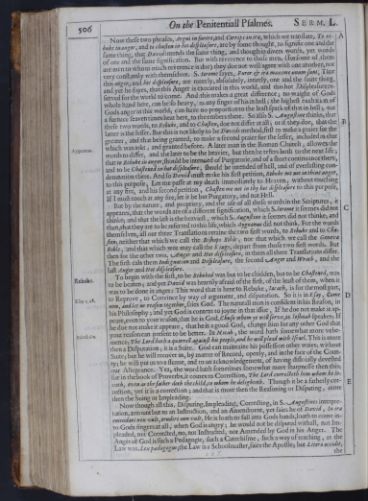 508
On the Penitentiall Psalmes.
Serm. L.
508
On the Penitentiall Psalmes.
Serm. L.
Now these two phrases, Argui in furore, and Corripi in ira, which we translate, To re-
buke in anger, and to chasten in hot displeasure, are by some thought, to signifie one and the
same thing, that David intends the same thing, and though in divers words, yet words
of one and the same signification. But with reverence to those men, (for some of them
are men to whom much reverence is due) they doe not well agree with one another, nor
very constantly with themselves. S. Ierome sayes, Furor & ira maxime unum sunt, That
this anger, and hot displeasure, are meerly, absolutely, intirely, one and the same thing,
and yet he sayes, that this Anger is executed in this world, and this hot Displeasure re-
served for the world to come. And this makes a great difference; no waight of Gods
whole hand here, can be so heavy, as any finger of his in hell; the highest exaltation of
Gods anger in this world, can have no proportion to the least spark of that in hell; nor
a furnace seaven times heat here, to the embers there. So also S. Augustine thinks, that
these two words, to Rebuke, and to Chasten, doe not differ at all; or if they doe, that the
latter is the lesser. But this is not likely to be Davids method, first to make a praier for the
greater, and that being granted, to make a second praier for the lesser, included in that
which was askt, Ayguanus. and granted before. A later man in the Roman Church, allowes the
words to differ, and the later to be the heavier, but then he refers both to the next life;
that to Rebuke in anger, should be intended of Purgatorie, and of a short continuance there,
and to be Chastened in hot displeasure, should be intended of hell, and of everlasting con-
demnation there. And so David must make his first petition, Rebuke me not in thine anger,
to this purpose, Let me passe at my death immediately to Heaven, without touching
at any fire, and his second petition, Chasten me not in thy hot displeasure to this purpose,
If I must touch at any fire, let it be but Purgatory, and not Hell.
But by the nature, and propriety, and the use of all these words in the Scriptures, it
appeares, that the words are of a different signification, which S. Ierome it seemes did not
thinke; and that the last is the heaviest, which S. Augustine it seemes did not thinke; and
then, that they are to be referred to this life, which Ayguanus did not think. For the words
themselves, all our three Translations retaine the two first words, to Rebuke and to Cha-
sten; neither that which we call the Bishops Bible, nor that which we call the Geneva
Bible, and that which wee may call the Kings, depart from those two first words. But
then for the other two, Anger and Hot displeasure, in them all three Translations differ.
The first cals them Indignation and Displeasure, the second Anger and Wrath, and the
last Anger and Hot displeasure.
To begin with the first, Rebuke. to be Rebuked was but to be chidden, but to be Chastened, was
to be beaten; and yet David was heartily afraid of the first, of the least of them, when it
was to be done in anger: This word that is here to Rebuke, Iacach, is for the most part,
to Reprove, Esay 1.18. to Convince by way of argument, and disputation. So it is in Esay, Come
now, and let us reason together, saies God. The naturall man is confident in his Reason, in
his Philosophy; and yet God is content to joyne in that issue, If he doe not make it ap-
peare, even to your reason, that he is God, Chuse whom ye will serve, as Ioshuah speakes; If
he doe not make it appeare, that he is a good God, change him for any other God that
your reason can present to be better.Micah 6.2. In Micah, the word hath somewhat more vehe-
mence; The Lord hath a quarrell against his people, and he will plead with Israel. This is more
then a Disputation; it is a Suite. God can maintaine his possession other waies; without
Suite; but he will recover us, by matter of Record, openly, and in the face of the Coun-
ty; he will put us to a shame, and to an acknowledgement, of having disloially devested
our Allegeance. Yea, the word hath sometimes somewhat more sharpnesse then this;
for in the book of Proverbs, it comes to Correction, The Lord correcteth him whom he lo-
veth, even as the father doth the child, in whom he delighteth. Though it be a fatherly cor-
rection, yet it is a correction; and that is more then the Reasoning or Disputing, more
then the Suing or Impleading.
Now though all this, Disputing, Impleading, Correcting, in S. Augustines interpre-
tation, amount but to an Instruction, and an Amendment, yet saies he of David, In ira
emendari non vult, erudiri non vult, He is loath to fall into Gods hands, loath to come in-
to Gods fingers at all, when God is angry; he would not be disputed withall, not Im-
pleaded, not Corrected, no, not Instructed, not Amended by God in his Anger. The
Anger of God is such a Pedagogie, such a Catechisme, such a way of teaching, as the
Law was. Lex pædagogus; the Law is a Schoolmaster, saies the Apostle; but Litera occidit, the
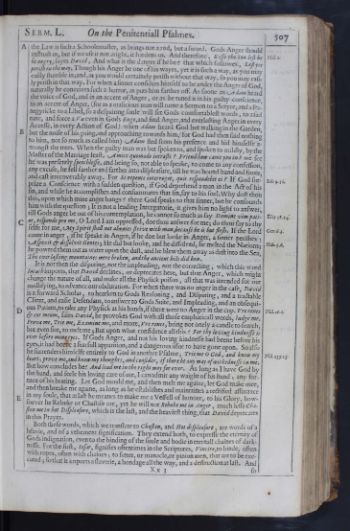 Serm. L.
On the Penitentiall Psalmes.
507
the Law is such a Schoolemaster, as brings not a rod, but a sword. Gods Anger should
Serm. L.
On the Penitentiall Psalmes.
507
the Law is such a Schoolemaster, as brings not a rod, but a sword. Gods Anger should
instruct us, but if we use it not aright, it hardens us. And therefore, Psal. 2. Kisse the Son lest he
be angry, sayes David, And what is the danger if he be? that which followes, Lest yee
perish in the way; Though his Anger be one of his wayes, yet it is such a way, as you may
easily stumble in; and, as you would certainely perish without that way, so you may easi-
ly perish in that way. For when a sinner considers himself to be under the Anger of God,
naturally he conceives such a horror, as puts him farther off. As soone as Adam heard
the voice of God, and in an accent of Anger, or as he tuned it in his guilty conscience,
to an accent of Anger, (for as a malicious man will turne a Sermon to a Satyre, and a Pa-
negyricke to a Libel, so a despairing soule will set Gods comfortablest words, to a sad
tune, and force a Væ even in Gods Euge, and find Anger, and everlasting Anger in every
Accesse, in every Action of God) when Adam heard God but walking in the Garden,
but the noise of his going, and approaching towards him, (for God had then said nothing
to him, not so much as called him) Adam fled from his presence and hid himselfe a-
mongst the trees. When the guilty man was but spoken to, and spoken to mildly, by the
Master of the Marriage feast, Amice quomodo intrasti? Friend how came you in? we see
he was presently speechlesse, and being so, not able to speake, to come to any confession,
any excuse, he fell farther and farther into displeasure, till he was bound hand and foote,
Iob 9.12. and cast irrecoverably away. For Si repente interroget, quis respondebit ei? If God sur-
prize a Conscience with a sudden question, if God deprehend a man in the Act of his
sin, and while he accomplishes and consummates that sin, say to his soul, Why dost thou
this, upon which mine anger hangs? there God speaks to that sinner, but he confounds
him with the question; It is not a leading Intergatorie, it gives him no light to answer,
Esay 38.14. till Gods anger be out of his contemplation, he cannot so much as say Domine vim pati-
or, responde pro me, O Lord I am oppressed, doe thou answer for me; do thou say to thy
selfe for me, My Spirit shall not alwaies strive with man, because he is but flesh.Gen. 6.3. If the Lord
come in anger, if he speake in Anger, if he doe but looke in Anger, a sinner perishes;
Aspexit & dissolvit Gentes; He did but looke, and he dissolved, he melted the Nations;Hab. 3.6.
he powred them out as water upon the dust, and he blew them away as dust into the Sea,
The everlasting mountaines were broken, and the ancient hils did bow.
It is not then the disputing, not the impleading, not the correcting, which this word
Iacach imports, that David declines, or deprecates here, but that Anger, which might
change the nature of all, and make all the Physick poison, all that was intended for our
mollifying, to advance our obduration. For when there was no anger in the case, David
is a forward Scholar, to hearken to Gods Reasoning, and Disputing, and a tractable
Client, and easie Defendant, to answer to Gods Suite, and Impleading, and an obsequi-
ous Patient, to take any Physick at his hands, if there were no Anger in the cup. Psal. 26.2. Vre renes
& cor meum, saies David, he provokes God with all those emphaticall words, Iudge me,
Prove me, Trie me, Examine me, and more, Vre renes, bring not onely a candle to search,
but even fire, to melt me; But upon what confidence all this? For thy loving kindnesse is
ever before mine eyes. If Gods Anger, and not his loving kindnesse had beene before his
eyes, it had beene a fearfull apparition, and a dangerous issue to have gone upon. So also
he surrenders himselfe entirely to God in another Psalme, Psal. 139.23. Trie me O God, and know my
heart; prove me, and know my thoughts, and consider, if there be any way of wickednesse in me.
But how concludes he? And lead me in the right way for ever. As long as I have God by
the hand, and feele his loving care of me, I can admit any waight of his hand; any for-
nace of his heating. Let God mould me, and then melt me againe, let God make mee,
and then breake me againe, as long as he establishes and maintaines a rectified assurance
in my soule, that at last he meanes to make me a Vessell of honour, to his Glory, how-
soever he Rebuke or Chastise me, yet he will not Rebuke me in Anger, much lesse Cha-
sten me in hot Displeasure, which is the last, and the heaviest thing, that David deprecates
in this Prayer.
Both these words, which we translate to Chasten, and Hot displeasure, are words of a
heavie, and of a vehement signification. They extend both, to expresse the eternity of
Gods indignation, even to the binding of the soule and bodie in eternall chaines of dark-
nesse. For the first, Iasar, signifies oftentimes in the Scriptures, Vincire, to binde, often
with ropes, often with chaines; to fetter, or manacle, or pinion men, that are to be exe-
cuted; so that it imports a slaverie, a bondage all the way, and a destruction at last. And Xx3 so
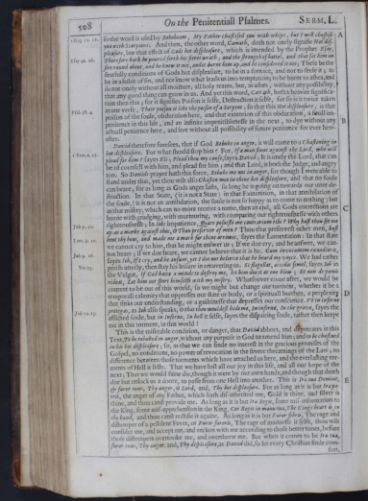 508
On the Penitentiall Psalmes.
Serm. L.
so the word is used by Rehoboam, 1 Reg. 12.11. My Father chastised you with whips, but I will chastise
508
On the Penitentiall Psalmes.
Serm. L.
so the word is used by Rehoboam, 1 Reg. 12.11. My Father chastised you with whips, but I will chastise
you with Scorpions. And then, the other word, Camath, doth not onely signifie Hot dis-
pleasure, but that effect of Gods hot displeasure, which is intended by the Prophet Esay,
Therefore hath he powred forth his fierce wrath,Esay 42. ult. and the strength of battel, and that set him on
fire round about, and he knew it not, and it burnt him up, and he considered it not; These be the
fearfully conditions of Gods hot displeasure, to be in a fornace, and not to feele it; to
be in a habit of sin, and not know what leads us into temptation; to be burnt to ashes, and
so not onely without all moisture, all holy teares, but, as ashes, without any possibility,
that any good thing can grow in us. And yet this word, Camath, hath a heavier significa-
tion then this; for it signifies Poison it selfe, Destruction it selfe, for so is it twice taken
in one verse, Psal. 58.4. Their poison is like the poison of a Serpent; so that this Hot displeasure, is that
poison of the soule, obduration here, and that extention of this obduration, a finall im-
penitence in this life, and an infinite impenitiblenesse in the next, to dye without any
actuall penitence here, and live without all possibility of future penitence for ever here-
after.
David therefore foresees, that if God Rebuke in anger, it will come to a Chastening in
hot displeasure.1 Sam. 2.25. For what should stop him? For, If a man sinne against the Lord, who will
plead for him? sayes Eli; Plead thou my cause, sayes David; It is onely the Lord, that can
be of counsell with him, and plead for him; and that Lord, is both the Judge, and angry
too. So Davids prayer hath this force, Rebuke me not in anger, for though I were able to
stand under that, yet thou wilt also Chasten mee in thine hot displeasure, and that no soule
can beare; for as long as Gods anger lasts, so long he is going on towards our utter de-
struction. In that State, (it is not a State) in that Exinanition, in that annihilation of
the soule, (it is not an annihilation, the soule is not so happy as to come to nothing) but
in that misery, which can no more receive a name, then an end, all Gods corrections are
borne with grudging, with murmuring, with comparing our righteousnesse with others
righteousnesse;Job 7.20. In Iobs impatience, Quare posuisti me contrarium tibi? Why hast thou set me
up as a marke against thee, O Thou preserver of men? Thou that preservest other men, hast
bent thy bow,Lam. 3.12. and made me a mark for thine arrowes, sayes the Lamentation: In that state
we cannot cry to him, that he might answer us; If we doe cry, and he answer, we can-
not heare;Job 9.16. if we doe heare, we cannot beleeve that it is he. Cum invocantem exaudierit,
sayes Iob, If I cry, and he answer, yet I doe not beleeve that he heard my voyce. We had rather
perish utterly, Ver. 23. then stay his leisure in recovering us. Si flagellat, occidat semel, sayes Iob in
the Vulgat, If God have a minde to destroy me, let him doe it at one blow; Et non de pœnis
rideat, Let him not sport himselfe with my misery. Whatsoever come after, we would be
content to be out of this world, so we might but change our torment, whether it be a
temporall calamity that oppresses our state or body, or a spirituall burthen, a perplexity
that sinks our understanding, or a guiltinesse that depresses our conscience. Vt in inferno
protegas, Job 14.13. as Iob also speaks, O that thou wouldest hide me, In inferno, In the grave, sayes the
afflicted soule, but in Inferno, In hell it selfe, sayes the dispairing soule, rather then keepe
me in this torment, in this world!
This is the miserable condition, or danger, that David abhors, and deprecates in this
Text, To be rebuked in anger, without any purpose in God to amend him; and to be chastned
in his hot displeasure; so, as that we can finde no interest in the gracious promises of the
Gospel, no conditions, no power of revocation in the severe threatnings of the Law; no
difference between those torments which have attached us here, and the everlasting tor-
ments of Hell it selfe. That we have lost all our joy in this life, and all our hope of the
next; That we would faine die, though it were by our own hands, and though that death
doe but unlock us a doore, to passe from one Hell into another. This is Ira tua Domine,
& furor tuus, Thy anger, O Lord, and, Thy hot displeasure. For as long as it is but Ira pa-
tris, the anger of my Father, which hath dis-inherited me, Gold is thine, and silver is
thine, and thou canst provide me. As long as it is but Ira Regis, some mis-information to
the King, some mis-apprehension in the King, Cor Regis in manu tua, The Kings heart is in
thy hand, and thou canst rectifie it againe. As long as it is but Furor febris, The rage and
distemper of a pestilent Fever, or Furor furoris, The rage of madnesse it selfe, thou wilt
consider me, and accept me, and reckon with me according to those better times, before
those distempers overtooke me, and overthrew me. But when it comes to be Ira tua,
furor tuus, Thy anger, and, Thy displeasure, as David did, so let every Christian finde com-
fort,
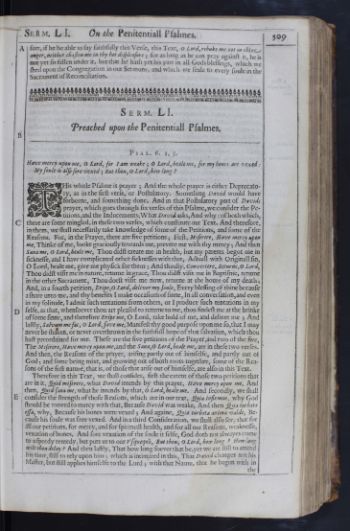 Serm. LI.
On the Penitentiall Psalmes.
509
fort, if he be able to say faithfully this Verse, this Text, O Lord, rebuke me not in thine
Serm. LI.
On the Penitentiall Psalmes.
509
fort, if he be able to say faithfully this Verse, this Text, O Lord, rebuke me not in thine
anger, neither chasten me in thy hot displeasure; for as long as he can pray against it, he is
not yet so fallen under it, but that he hath yet his part in all Gods blessings, which we
shed upon the Congregation in our Sermons, and which we seale to every soule in the
Sacrament of Reconcilation.
Serm. LI.
Preached upon the Penitentiall Psalmes.
Psal. 6. 2, 3.
Have mercy upon me, O Lord, for I am weake; O Lord, heale me, for my bones are vexed:
My soule is also sore vexed; But thou, O Lord, how long?
THisThis whole Psalme is prayer; And the whole prayer is either Deprecato-
ry, as in the first verse, or Postulatory. Something David would have
forborne, and something done. And in that Postulatory part of Davids
prayer, which goes through six verses of this Psalme, we consider the Pe-
titions, and the Inducements; What David asks, And why: of both which,
there are some mingled, in these two verses, which constitute our Text. And therefore,
in them, we shall necessarily take knowledge of some of the Petitions, and some of the
Reasons. For, in the Prayer, there are five petitions; First, Miserere, Have mercy upon
me, Thinke of me, looke graciously towards me, prevent me with thy mercy; And then
Sana me, O Lord, heale me, Thou didst create me in health, but my parents begot me in
sicknesse, and I have complicated other sicknesses with that, Actuall with Originall sin,
O Lord, heale me, give me physick for them; And thirdly, Convertere, Returne, O Lord,
Thou didst visit me in nature, returne in grace, Thou didst visit me in Baptisme, returne
in the other Sacrament, Thou doest visit me now, returne at the houre of my death;
And, in a fourth petition, Eripe, O Lord, deliver my soule, Every blessing of thine because
a snare unto me, and thy benefits I make occasions of sinne, In all conversation, and even
in my solitude, I admit such tentations from others, or I produce such tentations in my
selfe, as that, whensoever thou art pleased to returne to me, thou findest me at the brinke
of some sinne, and therefore Eripe me, O Lord, take hold of me, and deliver me; And
lastly, Salvum me fac, O Lord, save me, Manifest thy good purpose upon me so, that I may
never be shaken, or never overthrown in the faithfull hope of that salvation, which thou
hast preordained for me. These are the five petitions of the Prayer, and two of the five,
The Miserere, Have mercy upon me, and the Sana, O Lord, heale me, are in these two verses.
And then, the Reasons of the prayer, arising partly out of himselfe, and partly out of
God; and some being mixt, and growing out of both roots together, some of the Rea-
sons of the first nature, that is, of those that arise out of himselfe, are also in this Text.
Therefore in this Text, we shall consider, first the extent of those two petitions that
are in it, Quid miserere, what David intends by this prayer, Have mercy upon me, And
then, Quid sana me, what he intends by that, O Lord, heale me. And secondly, we shall
consider the strength of those Reasons, which are in our text, Quia infirmus, why God
should be moved to mercy with that, Because David was weake, And then Quia turbata
ossa, why, Because his bones were vexed; And againe, Quia turbata anima valde, Be-
cause his soule was sore vexed. And in a third Consideration, we shall also see, that for
all our petitions, for mercy, and for spirituall health, and for all our Reasons, weaknesse,
vexation of bones, And sore vexation of the soule it selfe, God doth not alwayes come
to a speedy remedy, but puts us to our Vsquequò, But thou, O Lord, how long? How long
wilt thou delay? And then lastly, That how long soever that be, yet we are still to attend
his time, still to rely upon him; which is intimated in this, That David changes not his
Master, but still applies himselfe to the Lord; with that Name, that he begun with in the
 510
On the Penitentiall Psalmes.
Serm. LI.
the first verse, he proceeds; and thrice in these few words he calls upon him by this
510
On the Penitentiall Psalmes.
Serm. LI.
the first verse, he proceeds; and thrice in these few words he calls upon him by this
name of Essence, Iehova, O Lord have mercy upon me, O Lord heale me, O Lord how long
wilt thou delay? He is not weary of attending the Lord, he is not inclinable to turn upon
any other then the Lord; Have mercy upon me O Lord, &c.
First then in our first part, 1 Part.
Quid mise-
reri. that part of Davids postulatory prayer in this Text, Have
mercy upon me, This mercy that David begs here, is not that mercy of God which is above
all his works; for those works which follow it, are above it; To heale him, in this Text,
To returne to him, To deliver his soule, To save him, in the next verses, are greater works
then this, which he calls here in that generall name of Mercy. For this word Chanan used
in this place, is not Dele iniquitates, Have mercy upon me so, as to blot out all mine ini-
quities; It is not Dimitte debita, Have mercy upon me so, as to forgive all my sins; but
it is onely Des mihi gratiam, Lord shed some drops of grace upon me, or as Tremellius
hath it, Gratiosus sis mihi, Be a gracious Lord unto me. For this word is used, where Noah
is said to have found grace in the eyes of the Lord;Gen. 6.8. which grace was, that God had provi-
ded for his bodily preservation in the Arke. And this word is used, not onely of God
towards men, Psal. 102.14. but also of men towards God; when they expresse their zeale towards
Gods house, and the compassion, and holy indignation which they had of the ruines
thereof, they expresse it in this word, Thy servants delight in the stones of Sion, & miserti
sunt pulveris ejus, They had mercy, they had compassion upon the dust and rubbish thereof. So
that here this Miserere mei, which is the first grone of a sick soule, the first glance of the
soule directed towards God, imports onely this, Lord turne thy countenance towards
me, Lord bring me to a sense that thou art turned towards me, Lord bring me within
such a distance, as my soule may feele warmth and comfort in the rising of that Sunne;
Miserere mei, Look graciously upon me.
At the first meeting of Isaac and Rebecca, Gen. 24.63. he was gone out to meditate in the fields, and
she came riding that way, with his fathers man, who was imployed in making that ma-
riage; and when upon asking she knew that it was he who was to be her husband, she
tooke a vaile and covered her face, sayes that story. What freedome, and nearnesse soever
they were to come to after, yet there was a modesty, and a bashfulnesse, and a reserved-
nesse required before; and her first kindnesse should be but to be seen. A man would be
glad of a good countenance from her that shall be his, before he asked her whether shee
will be his or no; A man would be glad of a good countenance from his Prince, before
he intend to presse him with any particular suit: And a sinner may be come to this Mi-
serere mei Domine, to desire that the Lord would think upon him, that the Lord would
look graciously towards him, that the Lord would refresh him with the beams of his fa-
vour, before he have digested his devotion into a formall prayer, or entred into a particu-
lar consideration, what his necessities are.
Upon those words of the Apostle, 1 Tim. 2.1. I exhort you that supplications, and prayers, and In-
tercessions, and giving of thanks be made for all men, S. Bernard makes certaine gradations, Bern. De 4.
modis orandi.
and steps, and ascensions of the soule in prayer, and intimates thus much, That by the
grace of Gods Spirit inanimating and quickning him, (without which grace he can have
no motion at all) a sinner may come Ad supplicationes, which is S. Pauls first step, To sup-
plications, which are à suppliciis, That out of a sense of some Judgement, some punish-
ment, he may make his recourse to God; And then, by a farther growth in that grace,
he may come Adorationes, which are Oris rationes, The particular expressing of his neces-
sities, with his mouth; and a faithfull assurance of obtaining them, in his prayer; And
after, he may come farther, Ad Intercessiones, to an Intercession, to such an interest in
Gods favour, as that he durst put himselfe betwixt God and other men, as Abraham
in the behalfe of Sodome, to intercede for them, with a holy confidence that God
would doe good to them, for his sake; And to a farther step then these, which the Apo-
stle may intend in that last, Ad gratiarum actiones, to a continuall Thanksgiving, That by
reason of Gods benefits multiplyed upon him, he finde nothing to aske, but his Thanks-
givings, and his acknowledgements, for former blessings, possesse and fill all his pray-
ers; Though he be growne up to this strength of devotion, To Supplications, to Pray-
ers, to Intercessions, to Thanksgivings, yet, sayes S. Bernard, at first, when he comes
first to deprehend himselfe in a particular sin, or in a course of sin, he comes Verecundo
affectu, Bashfully, shamefastly, tremblingly; he knows not what to aske, he dares ask
no particular thing at Gods hand; But though he be not come yet, to particular requests, for
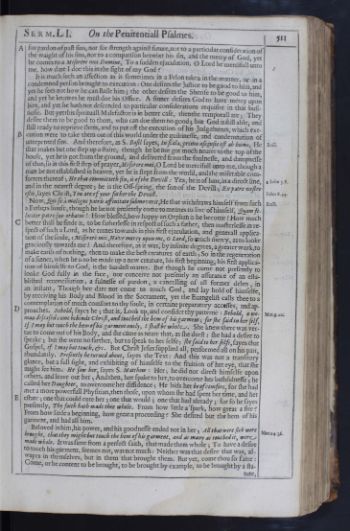 Serm. LI.
On the Penitentiall Psalmes.
511
for pardon of past sins, nor for strength against future, not to a particular consideration of
Serm. LI.
On the Penitentiall Psalmes.
511
for pardon of past sins, nor for strength against future, not to a particular consideration of
the waight of his sins, nor to a comparison betwixt his sin, and the mercy of God, yet
he comes to a Miserere mei Domine, To a sudden ejaculation, O Lord be mercifull unto
me, how dare I doe this in the sight of my God?
It is much such an affection as is sometimes in a Felon taken in the manner, or in a
condemned person brought to execution: One desires the Justice to be good to him, and
yet he sees not how he can Baile him; the other desires the Sherife to be good to him,
and yet he knowes he must doe his Office. A sinner desires God to have mercy upon
him, and yet he hath not descended to particular considerations requisite in that busi-
nesse. But yet this spirituall Malefactor is in better case, then the temporall are; They
desire them to be good to them, who can doe them no good; but God is still able, and
still ready to reprieve them, and to put off the execution of his Judgements, which exe-
cution were to take them out of this world under the guiltinesse, and condemnation of
unrepented sins. And therefore, as S. Basil sayes, In scala, prima ascensio est ab humo, Basil. He
that makes but one step up a staire, though he be not got much nearer to the top of the
house, yet he is got from the ground, and delivered from the foulnesse, and dampnesse
of that; so in this first step of prayer, Miserere mei, O Lord be mercifull unto me, though a
man be not established in heaven, yet he is stept from the world, and the miserable com-
forters thereof; He that committeth sin, is of the Devill: Yea, he is of him, in a direct line, 1 Iohn 3.8.
and in the nearest degree; he is the Off-spring, the son of the Devill; Ex patre vestro
estis, sayes Christ, You are of your father the Devill.Iohn 8.44.
Now, Qui se à maligni patris affinitate submoverit, He that withdraws himself from such Basil.
a Fathers house, though he be not presently come to meanes to live of himself, Quam fe-
liciter patre suo orbatus! How blessed, how happy an Orphan is he become! How much
better shall he finde it, to be fatherlesse in respect of such a father, then masterlesse in re-
spect of such a Lord, as he turnes towards in this first ejaculation, and generall applica-
tion of the soule, Miserere mei, Have mercy upon me, O Lord, so much mercy, as to looke
graciously towards me! And therefore, as it was, by infinite degrees, a greater work, to
make earth of nothing, then to make the best creatures of earth; So in the regeneration
of a sinner, when he is to be made up a new creature, his first beginning, his first applica-
tion of himselfe to God, is the hardest matter. But though he come not presently to
looke God fully in the face, nor conceive not presently an assurance of an esta-
blished reconciliation, a fulnesse of pardon, a cancelling of all former debts, in
an instant, Though hee dare not come to touch God, and lay hold of himselfe,
by receiving his Body and Blood in the Sacrament, yet the Euangelist calls thee to a
contemplation of much comfort to thy soule, in certaine preparatory accesses, and ap-
proaches. Behold, sayes he; that is, Look up, and consider thy patterne: Behold,Mat. 9.20. a wo-
man diseased came behinde Christ, and touched the hem of his garment; for she said in her self,
If I may but touch the hem of his garment onely, I shall be whole. She knew there was ver-
tue to come out of his Body, and she came as neare that, as she durst: she had a desire to
speake; but she went no farther, but to speak to her selfe; she said to her selfe, sayes that
Gospel, if I may but touch, &c. But Christ Jesus supplied all, performed all on his part,
abundantly. Presently he turned about, sayes the Text: And this was not a transitory
glance, but a full sight, and exhibiting of himselfe to the fruition of her eye, that she
might see him. He saw her, sayes S. Matthew: Her; he did not direct himselfe upon
others, and leave out her; And then, hee spake to her, to overcome her bashfulnesse; he
called her Daughter, to overcome her diffidence; He bids her be of comfort, for she had
met a more powerfull Physitian, then those, upon whom she had spent her time, and her
estate; one that could cure her; one that would; one that had already; for so he sayes
presently, Thy faith hath made thee whole. From how little a spark, how great a fire?
From how little a beginning, how great a proceeding? She desired but the hem of his
garment, and had all him.
Beloved in him, his power, and his goodnesse ended not in her;Mat. 14.36. All that were sick were
brought, that they might but touch the hem of his garment, and as many as touched it, were
made whole. It was farre from a perfect faith, that made them whole; To have a desire
to touch his garment, seemes not, was not much: Neither was that desire that was, al-
wayes in themselves, but in them that brought them. But yet, come thou so farre:
Come, or be content to be brought, to be brought by example, to be brought by a sta tute,
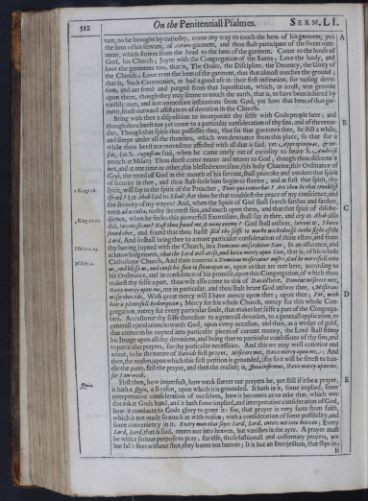 512
On the Penitentiall Psalmes.
Serm. LI.
tute, to be brought by curiosity, come any way to touch the hem of his garment, yea
512
On the Penitentiall Psalmes.
Serm. LI.
tute, to be brought by curiosity, come any way to touch the hem of his garment, yea
the hem of his servant, of Aarons garment, and thou shalt participate of the sweet oint-
ment, which flowes from the head to the hem of the garment. Come to the house of
God, his Church; Joyne with the Congregation of the Saints; Love the body, and
love the garments too, that is, The Order, the Discipline, the Decency, the Unity of
the Church; Love even the hem of the garment, that that almost touches the ground;
that is, Such Ceremonies, as had a good use in their first institution, for raising devo-
tion, and are freed and purged from that superstition, which, as a rust, was growne
upon them, though they may seeme to touch the earth, that is, to have been induced by
earthly men, and not immediate institutions from God, yet love that hem of that gar-
ment, those outward assistances of devotion in the Church.
Bring with thee a disposition to incorporate thy selfe with Gods people here; and
though thou beest not yet come to a particular consideration of thy sins, and of the reme-
dies, Though that spirit that possesses thee, that sin that governes thee, lie still a while,
and sleepe under all the thunders, which wee denounce from this place, so that for a
while thou beest not moved nor affected with all that is said, yet Appropinquas, & ne-
scis, (as S. Augustine said, when he came onely out of curiosity to heare S. Ambrose
preach at Milan) Thou doest come nearer and nearer to God, though thou discerne it
not, and at one time or other, this blessed exorcisme, this holy Charme, this Ordinance of
God, the word of God in the mouth of his servant, shall provoke and awaken that spirit
of security in thee, and thou shalt feele him begin to storme, and at first that spirit, thy
spirit, 1 Kings 18. will say to the spirit of the Preacher, Tune qui conturbas? Art thou he that troublest
Israel? (as Ahab said to Eliah) Art thou he that troublest the peace of my conscience, and
the security of my wayes? And, when the Spirit of God shall search farther and farther,
even ad occulta, to thy secretest sins, and touch upon them, and that that spirit of disobe-
dience, 1 King 21.20. when he feeles this powerfull Exorcisme, shall say in thee, and cry as Ahab also
did, Invenisti me? Hast thou found me, O mine enemy? God shall answer, Inveni te, I have
found thee, and found that thou hadst sold thy selfe to worke wickednesse in the sight of the
Lord, And so shall bring thee to a more particular consideration of thine estate, and from
thy having joyned with the Church, Psal. 102.13. in a Dominus miserebitur Sion, In an assurance, and
acknowledgement, that the Lord will arise, and have mercy upon Sion, that is, of his whole
Catholique Church, Psal. 67.1. And then come to a Dominus misereatur nostri, God be mercifull unto
us, and blesse us, and cause his face to shine upon us, upon us that are met here, according to
his Ordinance, and in confidence of his promise, upon this Congregation, of which thou
makest thy selfe a part, thou wilt also come to this of David here, Domine miserere mei,
Have mercy upon me, me in particular, and thou shalt heare God answer thee, Miserans
miserebor tibi, With great mercy will I have mercy upon thee; upon thee; For, with
him is plentifull Redemption; Mercy for his whole Church, mercy for this whole Con-
gregation, mercy for every particular soule, that makes her selfe a part of the Congrega-
tion. Accustome thy selfe therefore to a generall devotion, to a generall application, to
generall ejaculations towards God, upon every occasion, and then, as a wedge of gold,
that comes to be coyned into particular pieces of currant money, the Lord shall stamp
his Image upon all thy devotions, and bring thee to particular confessions of thy sins, and
to particular prayers, for thy particular necessities. And this we may well conceive and
admit, to be the nature of Davids first prayer, Miserere mei, Have mercy upon me; And
then, the reason, upon which this first petition is grounded, (for so it will be fittest to han-
dle the parts, first the prayer, and then the reason) is, Quia infirmus, Have mercy upon me,
for I am weak.
First then, Quia. how imperfect, how weak soever our prayers be, yet still if it be a prayer,
it hath a Quia, a Reason, upon which it is grounded. It hath in it, some implied, some
interpretative consideration of ourselves, how it becomes us to aske that, which wee
doe ask at Gods hand, and it hath some implied, and interpretative consideration of God,
how it conduces to Gods glory to grant it: for, that prayer is very farre from faith,
which is not made so much as with reason; with a consideration of some possibility, and
some conveniency in it. Every man that sayes Lord, Lord, enters not into heaven; Every
Lord, Lord, that is said, enters not into heaven, but vanishes in the ayre. A prayer must
be with a serious purpose to pray; for else, those fashionall and customary prayers, are
but false fires without shot, they batter not heaven; It is but an Interjection, that slips in; It
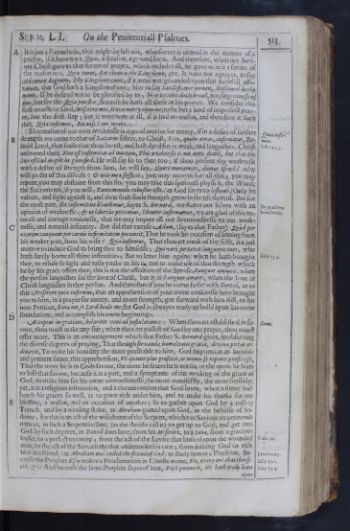 Serm. LI.
On the Penitentiall Psalmes.
513
It is but a Parenthesis, that might be left out, whatsoever is uttered in the manner of a
Serm. LI.
On the Penitentiall Psalmes.
513
It is but a Parenthesis, that might be left out, whatsoever is uttered in the manner of a
prayer, if it have not a Quia, a Reason, a ground for it. And therefore, when our Savi-
our Christ gave us that forme of prayer, which includes all, he gave us in it a forme of
the reason too, Quia tuum, For thine is the Kingdome, &c. It were not a prayer, to say
Adveniat Regnum, Thy Kingdome come, if it were not grounded upon that faithfull assu-
rance, that God hath a KingdomehereKingdome here; Nor to say Sanctificetur nomen, Hallowed be thy
name, If he desired not to be glorified by us; Nor to aske daily bread, nor forgivenesse of
sins, but for the Quia potestas, Because he hath all these in his power. We consider this
first accesse to God, Miserere mei, Have mercy upon me, to be but a kind of imperfect pray-
er, but the first step; but it were none at all, if it had no reason, and therefore it hath
this, Quia infirmus, Because I am weake.
This reason of our own weaknesse is a good motive for mercy, Quia infir-
mus.
Iohn 11.3. if in a desire of farther
strength we come to that of Lazarus sisters, to Christ, Ecce, quam amas, infirmatur, Be-
hold Lord, that soule that thou lovest, and hast dyed for, is weak, and languishes. Christ
answered then, Non est infirmitas ad mortem, This weaknesse is not unto death, but that the
Son of God might be glorified. He will say so to thee too; if thou present thy weaknesse
with a desire of strength from him, he will say, Quare moriemini, domus Israel? why
will ye die of this disease? Gratia mea sufficit; you may recover for all this; you may
repent, you may abstaine from this sin, you may take this spirituall physick, the Word,
the Sacraments, if you will; Tantummodo robustus esto, (as God sayes to Ioshuah) Only be
valiant, and fight against it, and thou shalt finde strength grow in the use thereof. But for
the most part, De infirmitate blandimur, sayes S. Bernard, De gradibus
humilitatis. we flatter our selves with an
opinion of weaknesse; & ut liberiùs peccemus, libenter infirmamur, we are glad of this na-
turall and corrupt weaknesse, that we may impute all our licentiousnesse to our weak-
nesse, and naturall infirmity. But did that excuse Adam, (sayes that Father) Quòd per
uxorem tanquam per carnis infirmitatem peccavit, That he took his occasion of sinning from
his weaker part, from his wife? Quia infirmus, That thou art weak of thy selfe, is a just
motive to induce God to bring thee to himselfe; Qui verè portavit languores tuos, who
hath surely borne all thine infirmities;Esay 53.4. But to leave him againe when he hath brought
thee, to refuse so light and easie yoake as his is, not to make use of that strength which
he by his grace offers thee, this is not the affection of the Spouse, Languor amantis, when
the person languishes for the love of Christ, but it is Languor amoris, when the love of
Christ languishes in that person. And therefore if you be come so far with David, as to
this Miserere quia infirmus, that an apprehension of your owne weaknesse have brought
you to him, in a prayer for mercy, and more strength, goe forward with him still, to his
next Petition, Sana me, O Lord heale me, for God is alwayes ready to build upon his owne
foundations, and accomplish his owne beginnings.
Acceptus in gratiam, hilariter veni ad postulationes:Sanæ. When thou art established in fa-
vour, thou maist make any suit; when thou art possest of God by one prayer, thou mayst
offer more. This is an encouragement which that Father S. Bernard gives, in observing
the diverse degrees of praying, That though servandæ humilitatis gratia, divina pietas or-
dinavit, To make his humility the more profitable to him, God imprints in an humble
and penitent sinner, this apprehension, Vt quanto plus profecit, eo minus se reputet profecisse,
That the more he is in Gods favour, the more he feares he is not so, or the more he fears
to lose that favour, because it is a part, and a symptome of the working of the grace of
God, to make him see his owne unworthinesse, the more manifestly, the more sensibly,
yet, it is a religious insinuation, and a circumvention that God loves, when a sinner hus-
bands his graces so well, as to grow rich under him, and to make his thanks for one
blessing, a reason, and an occasion of another; so to gather upon God by a rolling
Trench, and by a winding staire, as Abraham gained upon God, in the behalfe of So-
dome; for this is an act of the wisedome of the Serpent, which our Saviour recommends
unto us, in such a Serpentine line, (as the Artists call it) to get up to God, and get into
God by such degrees, as David does here, from his Miserere, to a Sana, from a gracious
looke, to a perfect recovery;Luke 10. from the act of the Levite that looked upon the wounded
man, to the act of the Samaritane that undertooke his cure; from desiring God to visit
him as a friend, (as Abraham was called the friend of God) to study him as a Physitian.Iames 2.23.
Esay 55.1.
Esay 53.4. Be-
cause the Prophet Esay makes a Proclamation in Christs name, Ho, every one that thirst-
eth, &c. And because the same Prophet sayes of him, Verè portavit, He hath truly born upon
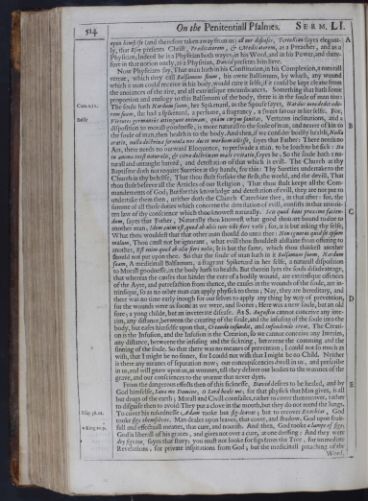 514
On the Penitentiall Psalmes.
Serm. LI.
upon himselfe (and therefore taken away from us) all our diseases, Tertullian sayes elegant-
514
On the Penitentiall Psalmes.
Serm. LI.
upon himselfe (and therefore taken away from us) all our diseases, Tertullian sayes elegant-ly, that Esay presents Christ, Prædicatorem, & Medicatorem, as a Preacher, and as a
Physitian; Indeed he is a Physitian both wayes; in his Word, and in his Power, and there-
fore in that notion onely, as a Physitian, David presents him here.
Now Physitians say, That man hath in his Constitution, in his Complexion, a naturall
vertue, which they call Balsamum suum, his owne Balsamum, by which, any wound
which a man could receive in his body, would cure it selfe, if it could be kept cleane from
the anoiances of the aire, and all extrinsique encumbrances. Something that hath some
proportion and analogy to this Balsamum of the body, there is in the soule of man too:
The soule hath Nardum suam, Cant. 1.12. her Spikenard, as the Spouse sayes, Nardus mea dedit odo-
rem suum, she had a spikenard, a perfume, a fragrancy, a sweet savour in her selfe. For,
Virtutes germaniùs attingunt animam, quàm corpus sanitas, Vertuous inclinations, and a Basil.
disposition to morall goodnesse, is more naturall to the soule of man, and nearer of kin to
the soule of man, then health is to the body. And then, if we consider bodily health, Nulla
oratio, nulla doctrinæ formula nos docet morbum odiisse, sayes that Father: There needs no
Art, there needs no outward Eloquence, to perswade a man, to be loath to be sick: Ita
in anima inest naturalis, & citra doctrinam mali evitatio, sayes he; So the soule hath a na-
turall and untaught hatred, and detestation of that which is evill. The Church at thy
Baptisme doth not require Sureties at thy hands, for this: Thy Sureties undertake to the
Church in thy behalfe, That thou shalt forsake the flesh, the world, and the devill, That
thou shalt beleeve all the Articles of our Religion, That thou shalt keepe all the Com-
mandements of God; But for this knowledge and detestation of evill, they are not put to
undertake them then, neither doth the Church Catechize thee, in that after: for, the
summe of all those duties which concerne the detestation of evill, consists in that unwrit-
ten law of thy conscience which thou knowest naturally. Scis quod boni proximo facien-
dum, sayes that Father, Naturally thou knowest what good thou art bound to doe to
another man; Idem enim est, quod ab aliis tute tibi fieri velis; for, it is but asking thy selfe,
What thou wouldest that that other man should do unto thee: Non ignoras quid sit ipsum
malum, Thou canst not be ignorant, what evill thou shouldest abstaine from offering to
another, Est enim quod ab alio fieri nolis, It is but the same, which thou thinkest another
should not put upon thee. So that the soule of man hath in it Balsamum suum, Nardum
suam, A medicinall Balsamum, a fragrant Spikenard in her selfe, a naturall disposition
to Morall goodnesse, as the body hath to health. But therein lyes the souls disadvantage,
that whereas the causes that hinder the cure of a bodily wound, are extrinsique offences
of the Ayre, and putrefaction from thence, the causes in the wounds of the soule, are in-
trinsique, so as no other man can apply physick to them; Nay, they are hereditary, and
there was no time early inough for our selves to apply any thing by way of prevention,
for the wounds were as soone as we were, and sooner; Here was a new soule, but an old
sore; a yong childe, but an inveterate disease. As S. Augustin cannot conceive any inte-
rim, any distance, between the creating of the soule, and the infusing of the soule into the
body, but eases himselfe upon that, Creando infundit, and infundendo creat, The Creati-
on is the Infusion, and the Infusion is the Creation, so we cannot conceive any Interim,
any distance, betweene the infusing and the sickning, betweene the comming and the
sinning of the soule. So that there was no meanes of prevention; I could not so much as
wish, that I might be no sinner, for I could not wish that I might be no Child. Neither
is there any meanes of separation now; our concupiscencies dwell in us, and prescribe
in us, and will gnaw upon us, as wormes, till they deliver our bodies to the wormes of the
grave, and our consciences to the worme that never dyes.
From the dangerous effects then of this sicknesse, David desires to be healed, and by
God himselfe, Sana me Domine, O Lord heale me; for that physick that Man gives, is all
but drugs of the earth; Morall and Civill counsailes, rather to cover then recover, rather
to disguise then to avoid: They put a clove in the mouth, but they do not mend the lungs.
To cover his nakednesse Adam tooke but fig-leaves;Esay 38.11. but to recover Ezechias, God
tooke figs themselves. Man deales upon leaves, that cover, and shadow, God upon fruit-
full and effectuall meanes, 2 King. 20.7. that cure, and nourish. And then, God tooke a lumpe of figs;
God is liberall of his graces, and gives not over a cure, at one dressing: And they were
dry figs too, sayes that story; you must not looke for figs from the Tree, for immediate
Revelations, for private inspirations from God; but the medicinall preaching of the Word,
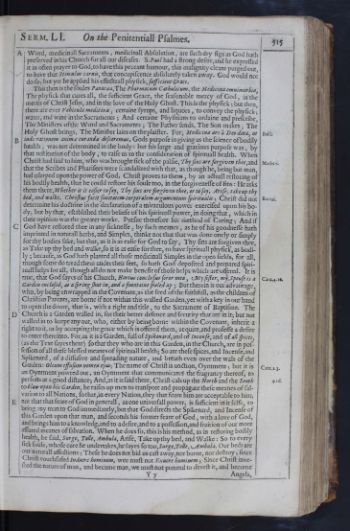 Serm. LI.
On the Penitentiall Psalmes.
515
Word, medicinall Sacraments, medicinall Absolution, are such dry figs as God hath
Serm. LI.
On the Penitentiall Psalmes.
515
Word, medicinall Sacraments, medicinall Absolution, are such dry figs as God hath
preserved in his Church for all our diseases. S. Paul had a strong desire, and he expressed
it in often prayer to God, to have this peccant humour, this malignity cleane purged out,
to have that Stimulus carnis, that concupiscence absolutely taken away. God would not
do so; but yet he applied his effectuall physick, sufficient Grace.
This then is the soules Panacæa, The Pharmacum Catholicum, the Medicina omnimorbia,
The physick that cures all, the sufficient Grace, the seasonable mercy of God, in the
merits of Christ Jesus, and in the love of the Holy Ghost. This is the physick; but then,
there are ever Vehicula medicinæ, certaine syrups, and liquors, to convey the physick;
water, and wine in the Sacraments; And certaine Physitians to ordaine and prescribe,
The Ministers of the Word and Sacraments; The Father sends, The Son makes, The
Holy Ghost brings, The Minister laies on the plaister. For, Medicinæ ars à Deo data, Basil. ut
inde rationem animæ curandæ disceremus, Gods purpose in giving us the science of bodily
health, was not determined in the body: but his large and gracious purpose was, by
that restitution of the body, to raise us to the consideration of spirituall health. When
Christ had said to him, who was brought sick of the palsie, Thy sins are forgiven thee, Marke 2. and
that the Scribes and Pharisees were scandalized with that, as though he, being but man,
had usurped upon the power of God, Christ proves to them, by an actuall restoring of
his bodily health, that he could restore his soule too, in the forgivenesse of sins: He asks
them there, Whether is it easier to say, Thy sins are forgiven thee, or to say, Arise, take up thy
bed, and walke. Christus facit sanitatem corporalem argumentum spiritualis;Bernar. Christ did not
determine his doctrine in the declaration of a miraculous power exercised upon his bo-
dy, but by that, established their beliefe of his spirituall power, in doing that, which in
their opinion was the greater worke. Pursue therefore his method of Curing; And if
God have restored thee in any sicknesse, by such meanes, as he of his goodnesse hath
imprinted in naturall herbs, and Simples, thinke not that that was done onely or simply
for thy bodies sake, but that, as it is as easie for God to say, Thy sins are forgiven thee,
as Take up thy bed and walke, so it is as easie for thee, to have spirituall physick, as bodi-
ly; because, as God hath planted all those medicinall Simples in the open fields, for all,
though some do tread them under their feet, so hath God deposited and prepared spiri-
tuall helps for all, though all do not make benefit of those helps which are offered. It is
true, that God sayes of his Church, Hortus conclusus soror mea, My sister, Cant. 4.12. my Spouse is a
Garden enclosed, as a spring shut in, and a fountaine sealed up; But therein is our advantage,
who, by being enwrapped in the Covenant, as the seed of the faithfull, as the children of
Christian Parents, are borne if not within this walled Garden, yet with a key in our hand
to open the doore, that is, with a right and title, to the Sacrament of Baptisme. The
Church is a Garden walled in, for their better defence and security that are in it; but not
walled in to keepe any out, who, either by being borne within the Covenant, inherit a
right to it, or by accepting the grace which is offered them, acquire, and professe a desire
to enter thereinto. For, as it is a Garden, full of Spikenard, and of Incense, and of all spices,
(as the Text sayes there) so that they who are in this Garden, in the Church, are in pos-
session of all these blessed meanes of spirituall health; So are these spices, and Incense, and
Spikenard, of a diffusive and spreading nature, and breath even over the wals of the
Garden: Oleum effusum nomen ejus; The name of Christ is unction, Oyntment;Cant. 1.3. but it is
an Oyntment powred out, an Oyntment that communicates the fragrancy thereof, to
persons at a good distance; And, as it is said there, Christ cals up the North and the South 4.16.
to blow upon his Garden, he raises up men to transport and propagate these meanes of sal-
vation to all Nations, so that, in every Nation, they that feare him are acceptable to him;
not that that feare of God in generall, as one universall power, is sufficient in it selfe, to
bring any man to God immediately, but that God directs the Spikenard, and Incense of
this Garden upon that man, and seconds his former feare of God, with a love of God,
and brings him to a knowledg, and to a desire, and to a possession, and fruition of our more
assured meanes of salvation. When he does so, this is his method, as in restoring bodily
health, he said, Surge, Tolle, Ambula, Arise, Take up thy bed, and Walke: So to every
sick soule, whose cure he undertakes, he sayes so too, Surge, Tolle, Ambula. Our beds are
our naturall affections; These he does not bid us cast away, nor burne, nor destroy; since
Christ vouchsafed Induere hominem, wee must not Exuere hominem; Since Christ inve-
sted the nature of man, and became man, we must not pretend to devest it, and become Yy Angels,
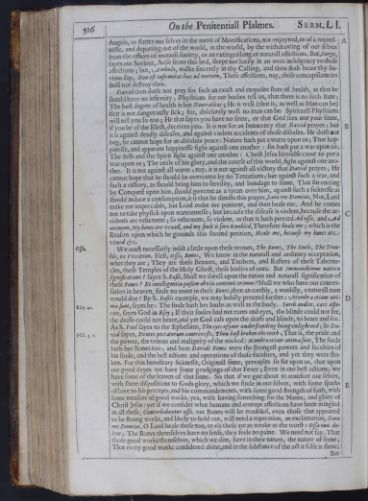 516
On the Penitentiall Psalmes.
Serm. LI.
Angels, or flatter our selves in the merit of Mortifications, not enjoyned, or of a retired-
516
On the Penitentiall Psalmes.
Serm. LI.
Angels, or flatter our selves in the merit of Mortifications, not enjoyned, or of a retired-nesse, and departing out of the world, in the world, by the withdrawing of our selves
from the offices of mutuall society, or an extinguishing of naturall affections. But, Surge,
sayes our Saviour, Arise from this bed, sleepe not lazily in an over-indulgency to these
affections; but, Ambula, walke sincerely in thy Calling, and thou shalt heare thy Sa-
viour say, Non est infirmitas hæc ad mortem, These affections, nay, these concupiscencies
shall not destroy thee.
David then doth not pray for such an exact and exquisite state of health, as that he
should have no infirmity; Physitians for our bodies tell us, that there is no such state;
The best degree of health is but Neutralitas; He is well (that is, as well as Man can be)
that is not dangerously sick; for, absolutely well no man can be. Spirituall Physitians
will tell you so too; He that sayes you have no sinne, or that God sees not your sinne,
if you be of the Elect, deceives you. It is not for an Innocency that David prayes; but
it is against deadly diseases, and against violent accidents of those diseases. He doth not
beg, he cannot hope for an absolute peace: Nature hath put a warre upon us; True hap-
pinesse, and apparant happinesse fight against one another: sin hath put a war upon us;
The flesh and the Spirit fight against one another: Christ Jesus himselfe came to put a
war upon us; The zeale of his glory, and the course of this world, fight against one ano-
ther. It is not against all warre; nay, it is not against all victory that David prayes; He
cannot hope that he should be overcome by no Tentations; but against such a war, and
such a victory, as should bring him to servility, and bondage to sinne, That sin entring
by Conquest upon him, should governe as a tyran over him, against such a sicknesse as
should induce a consumption, it is that he directs this prayer, Sana me Domine, Not, Lord
make me impeccable, but Lord make me penitent, and then heale me. And he comes
not to take physick upon wantonnesse; but because the disease is violent, because the ac-
cidents are vehement; so vehement, so violent, as that it hath pierced Ad ossa, and Ad
animam, My bones are vexed, and my soule is sore troubled, Therefore heale me; which is the
Reason upon which he grounds this second petition, Heale me, because my bones are
vexed &c.
We must necessarily insist a little upon these termes, Ossa. The Bones, The Soule, The Trou-
ble, or Vexation. First, Ossa, Bones, We know in the naturall and ordinary acceptation,
what they are; They are these Beames, and Timbers, and Rafters of these Taberna-
cles, these Temples of the Holy Ghost, these bodies of ours. But Immanebimus nativæ
significationi? sayes S. Basil, Shall we dwell upon the native and naturall signification of
these Bones? Et intelligentia passim obvia contenti erimus? Shall we who have our conver-
sation in heaven, finde no more in these Bones, then an earthly, a worldly, a naturall man
would doe? By S. Basils example, we may boldly proceed farther: Membra etiam ani-
mæ sunt, Esay 42. sayes he: The soule hath her limbs as well as the body. Surdi audite, cæci aspi-
cite, sayes God in Esay; If their soules had not eares and eyes, the blinde could not see,
the deafe could not heare, and yet God cals upon the deafe and blinde, to heare and see.
As S. Paul sayes to the Ephesians, The eyes of your understanding being enlightned; so Da-
vid sayes, Psal. 3.7. Dentes peccatorum contrivisti, Thou hast broken the teeth; That is, the pride and
the power, the venom and malignity of the wicked: Membra etiam animæ sunt, The soule
hath her Bones too; and here Davids Bones were the strongest powers and faculties of
his soule, and the best actions and operations of those faculties, and yet they were sha-
ken. For this hereditary sicknesse, Originall sinne, prevayles so far upon us, that upon
our good dayes we have some grudgings of that Fever; Even in our best actions, we
have some of the leaven of that sinne. So that if we goe about to comfort our selves,
with some dispositions to Gods glory, which we finde in our selves, with some sparks
of love to his precepts, and his commandements, with some good strength of faith, with
some measure of good works, yea, with having something for the Name, and glory of
Christ Jesus: yet if we consider what humane and corrupt affections have been mingled
in all these, Conturbabuntur ossa, our Bones will be troubled, even those that appeared
to be strong works, and likely to hold out, will need a reparation, an exclamation, Sana
me Domine, O Lord heale these too, or els these are as weake as the worst: Ossa non do-
lent; The Bones themselves have no sense, they feele no paine. We need not say, That
those good works themselves, which we doe, have in their nature, the nature of sinne;
That every good worke considered alone, and in the substance of the act it selfe is sinne; But
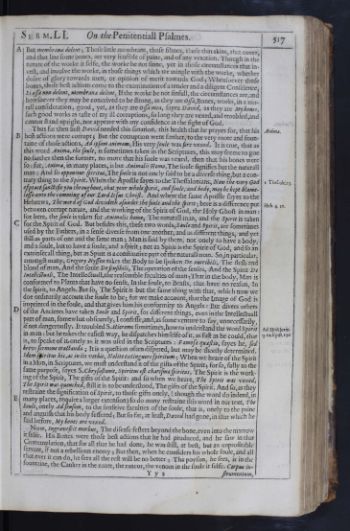 Serm. LI.
On the Penitentiall Psalmes.
517
But membranæ dolent; Those little membrans, those filmes, those thin skins, that cover,
Serm. LI.
On the Penitentiall Psalmes.
517
But membranæ dolent; Those little membrans, those filmes, those thin skins, that cover,
and that line some bones, are very sensible of paine, and of any vexation. Though in the
nature of the worke it selfe, the worke be not sinne, yet in those circumstances that in-
vest, and involve the worke, in those things which we mingle with the worke, whether
desire of glory towards men, or opinion of merit towards God; Whensoever those
bones, those best actions come to the examination of a tender and a diligent Conscience,
Si ossa non dolent, membranæ dolent, If the worke be not sinfull, the circumstances are, and
howsoever they may be conceived to be strong, as they are Ossa, Bones, works, in a mo-
rall consideration, good, yet, as they are Ossa mea, sayes David, as they are My bones,
such good works as taste of my ill corruptions, so long they are vexed, and troubled, and
cannot stand upright, nor appeare with any confidence in the sight of God. Thus far then first David needed this sanation, this health that he prayes for, Anima. that his
best actions were corrupt; But the corruption went farther, to the very roote and foun-
taine of those actions, Ad ipsam animam, His very soule was sore vexed. It is true, that as
this word Anima, the soule, is sometimes taken in the Scriptures, this may seeme to goe
no farther then the former, no more that his soule was vexed, then that his bones were
so: for, Anima, in many places, is but Animalis Homo, The soule signifies but the naturall
man: And so opponitur spiritui, The soule is not onely said to be a diverse thing, but a con-
trary thing to the Spirit. When the Apostle sayes to the Thessalonians, 1 Thes. ult. 23. Now the very God
of peace sanctifie you throughout, that your whole spirit, and soule, and body, may be kept blame-
lesse unto the comming of our Lord Iesus Christ. And where the same Apostle sayes to the
Hebrews, The word of God divideth asunder the soule and the spirit;Heb. 4.12. here is a difference put
between corrupt nature, and the working of the Spirit of God, the Holy Ghost in man:
for here, the soule is taken for Animalis homo, The naturall man, and the Spirit is taken
for the Spirit of God. But besides this, these two words, Soule and Spirit, are sometimes
used by the Fathers, in a sense diverse from one another, and as different things, and yet
still as parts of one and the same man; Man is said by them, not onely to have a body,
and a soule, but to have a soule, and a spirit; not as Spirit is the Spirit of God, and so an
extrinsecall thing, but as Spirit is a constitutive part of the naturall man. So, in particular,
amongst many, Gregory Nyssen takes the Body to be spoken De nutribili, The flesh and
bloud of man, And the soule De sensibili, The operation of the senses, And the Spirit De
Intellectuali, The Intellectuall, the reasonable faculties of man; That in the body, Man is
conformed to Plants that have no sense, In the soule, to Beasts, that have no reason, In
the spirit, to Angels. But so, The Spirit is but the same thing with that, which now we
doe ordinarily account the soule to be; for we make account, that the Image of God is
imprinted in the soule, and that gives him his conformity to Angels: But divers others
of the Ancients have taken Soule and Spirit, for different things, even in the Intellectuall
part of man, somewhat obscurely, I confesse, and, as some venture to say, unnecessarily,
if not dangerously. It troubled S. Hierome sometimes, Ad Hedibiam.
q. 12. Epist. 150 how to understand the word Spirit
in man: but he takes the easiest way, he dispatches himselfe of it, as fast as he could, that
is, to speake of it onely as it was used in the Scriptures: Famosa quæstio, sayes he, sed
brevi sermone tractanda; It is a question often disputed, but may be shortly determined,
Idem spiritus hic, ac in iis verbis, Nolite extinguere spiritum; When we heare of the Spirit
in a Man, in Scriptures, we must understand it of the gifts of the Spirit; for so, fully to the
same purpose, sayes S. Chrysostome, Spiritus est charisma spiritus, The Spirit is the work-
ing of the Spirit, The gifts of the Spirit: and so when we heare, The Spirit was vexed,
The Spirit was quenched, still it is to be understood, The gifts of the Spirit. And so, as they
restraine the signification of Spirit, to those gifts onely, (though the word do indeed, in
many places, require a larger extension) so do many restraine this word in our text, The
Soule, onely Ad sensum, to the sensitive faculties of the soule, that is, onely to the paine
and anguish that his body suffered; But so far, at least, David had gone, in that which he
said before, My bones are vexed.
Now, Ingravescit morbus, The disease festers beyond the bone, even into the marrow
it selfe. His Bones were those best actions that he had produced, and he saw in that
Contemplation, that for all that he had done, he was still, at best, but an unprofitable
servant, if not a rebellious enemy; But then, when he considers his whole soule, and all
that ever it can do, he sees all the rest will be no better; The poyson, he sees, is in the
fountaine, the Canker in the roote, the rancor, the venom in the soule it selfe. Corpus in-
Yy2 strumentum
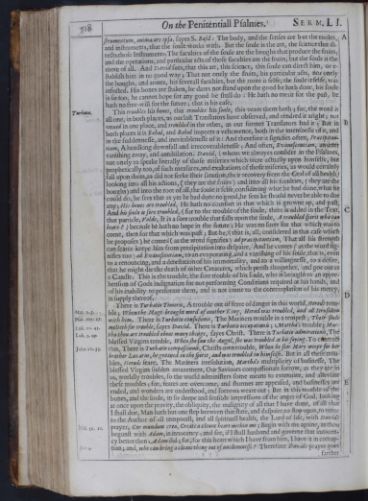 518
On the Penitentiall Psalmes.
Serm. LI.
strumentum, anima ars ipsa, sayes S. Basil: The body, and the senses are but the tooles,
518
On the Penitentiall Psalmes.
Serm. LI.
strumentum, anima ars ipsa, sayes S. Basil: The body, and the senses are but the tooles,
and instruments, that the soule works with. But the soule is the art, the science that di-
rects those Instruments; The faculties of the soule are the boughs that produce the fruits;
and the operations, and particular acts of those faculties are the fruits, but the soule is the
roote of all. And David sees, that this art, this science, this soule can direct him, or e-
stablish him in no good way; That not onely the fruits, his particular acts, nor onely
the boughs, and armes, his severall faculties, but the roote it selfe, the soule it selfe, was
infected. His bones are shaken, he dares not stand upon the good he hath done, his soule
is so too, he cannot hope for any good he shall do: He hath no merit for the past, he
hath no free-will for the future; that is his case.
This troubles his bones, Turbata. this troubles his soule, this vexes them both; for, the word is
all one, in both places, as our last Translators have observed, and rendred it aright; not
vexed in one place, and troubled in the other, as our former Translators had it; But in
both places it is Bahal, and Bahal imports a vehemence, both in the intensnesse of it, and
in the suddennesse, and inevitablenesse of it: And therefore it signifies often, Præcipitan-
tiam, A headlong downfall and irrecoverablenesse; And often, Evanescentiam, an utter
vanishing away, and annihilation. David, (whom we alwayes consider in the Psalmes,
not onely to speake literally of those miseries which were actually upon himselfe, but
prophetically too, of such measures, and exaltations of those miseries, as would certainly
fall upon them, as did not seeke their sanation, their recovery from the God of all health)
looking into all his actions, (they are the fruits) and into all his faculties, (they are the
boughs) and into the root of all, the soule it selfe, considering what he had done, what he
could do, he sees that as yet he had done no good, he sees he should never be able to doe
any; His bones are troubled, He hath no comfort in that which is growne up, and past,
And his soule is sore troubled, (for to the trouble of the soule, there is added in the Text,
that particle, Valde, It is a sore trouble that falls upon the soule, A troubled spirit who can
beare?) because he hath no hope in the future; He was no surer for that which was to
come, then for that which was past; But he, (that is, all, considered in that case which
he proposes) he comes (as the word signifies) ad præcipitantiam, That all his strength
can scarce keepe him from precipitation into despaire, And he comes (as the word sig-
nifies too) ad Evanescentiam, to an evaporating, and a vanishing of his soule, that is, even
to a renouncing, and a detestation of his immortality, and to a willingnesse, to a desire,
that he might die the death of other Creatures, which perish altogether, and goe out as
a Candle. This is the trouble, the sore trouble of his soule, who is brought to an appre-
hension of Gods indignation for not performing Conditions required at his hands, and
of his inability to performe them, and is not come to the contemplation of his mercy,
in supply thereof.
There is Turbatio Timoris, A trouble out of feare of danger in this world, Herods trou-
ble; When the Magi brought word of another King, Herod was troubled, and all Ierusalem Mat. 2.3.
Psal. 107.27.
with him. There is Turbatio confusionis, The Mariners trouble in a tempest; Their soule
melteth for trouble, Luk. 10.41.
Luk. 1.29. sayes David. There is Turbatio occupationis; Martha's trouble; Mar-
tha thou art troubled about many things, sayes Christ. There is Turbatio admirationis, The
blessed Virgins trouble, When she saw the Angel, she was troubled at his saying. To contract
this, John 11.33. There is Turbatio compassionis, Christs own trouble, When he saw Mary weepe for her
brother Lazarus, he groaned in the spirit, and was troubled in himselfe. But in all these trou-
bles, Herods feare, The Mariners irresolution, Martha's multiplicity of businesse, The
blessed Virgins sudden amazement, Our Saviours compassionate sorrow, as they are in
us, worldly troubles, so the world administers some means to extenuate, and alleviate
these troubles; for, feares are overcome, and stormes are appeased, and businesses are
ended, and wonders are understood, and sorrows weare out; But in this trouble of the
bones, and the soule, in so deepe and sensible impressions of the anger of God, looking
at once upon the pravity, the obliquity, the malignity of all that I have done, of all that
I shall doe, Man hath but one step between that state, and despaire, to stop upon, to turne
to the Author of all temporall, and all spirituall health, the Lord of life, with Davids
prayer, Psal. 51.10. Cor mundum crea, Create a cleane heart within me; Begin with me againe, as thou
begunst with Adam, in innocency; and see, if I shall husband and governe that innocen-
cy better then Adam did; for, for this heart which I have from him, I have it in corrup-
tion; and, Job 4. who can bring a cleane thing out of uncleannesse? Therefore Davids prayer goes farther
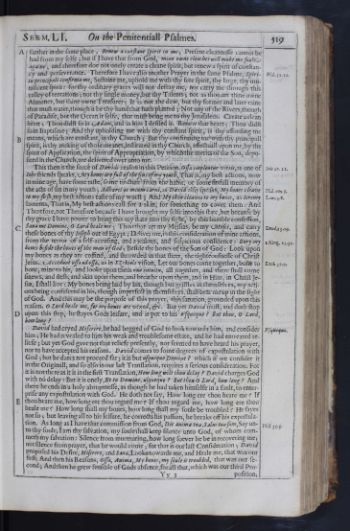 Serm. LI.
On the Penitentiall Psalmes.
519
farther in the same place, Renew a constant spirit in me; Present cleannesse cannot be
Serm. LI.
On the Penitentiall Psalmes.
519
farther in the same place, Renew a constant spirit in me; Present cleannesse cannot be
had from my selfe; but if I have that from God, mine owne cloathes will make me foule
againe, and therefore doe not onely create a cleane spirit, but renew a spirit of constan-
cy and perseverance. Therefore I have also another Prayer in the same Psalme, Psal. 51.12. Spiri-
tu principali confirma me, Sustaine me, uphold me with thy free spirit, thy large, thy mu-
nificent spirit: for thy ordinary graces will not defray me, nor carry me through this
valley of tentations; not thy single money, but thy Talents; not as thou art thine owne
Almoner, but thine owne Treasurer; It is not the dew, but thy former and later raine
that must water, though it be thy hand that hath planted; Not any of the Rivers, though
of Paradise, but the Ocean it selfe, that must bring me to thy Jerusalem. Create a clean
heart; Thou didst so in Adam, and in him I defiled it. Renew that heart; Thou didst
so in Baptisme; And thy upholding me with thy constant spirit, is thy affording me
means, which are constant, in thy Church; But thy confirming me with thy principall
spirit, is thy making of those meanes, instituted in thy Church, effectuall upon me, by the
spirit of Application, the spirit of Appropriation, by which the merits of the Son, depo-
sited in the Church, are delivered over unto me.
This then is the force of Davids reason in this Petition, Ossa implentur vitiis, Iob 20.11. as one of
Iobs friends speaks, My bones are full of the sins of my youth, That is, my best actions, now
in mine age, have some taste, some tincture from the habit, or some sinfull memory of
the acts of sin in my youth; Adhæret os meum carni, as David also speaks, Psal. 102.5.
Lam. 4.8. My bones cleave
to my flesh, my best actions taste of my worst; And My skin cleaves to my bones, as Ieremy
laments, That is, My best actions call for a skin, for something to cover them: And
Therefore, not Therefore because I have brought my selfe into this state, but because by
thy grace I have power to bring this my state into thy sight, by this humble confession,
Sana me Domine, O Lord heale me; Thou that art my Messias, be my Moses, Exod. 13.19. and carry
these bones of thy Ioseph out of Egypt; Deliver me, in this consideration of mine actions,
from the terror of a self-accusing, and a jealous, and suspicious conscience: 1 King. 13.31. Bury my
bones beside the bones of the man of God; Beside the bones of the Son of God: Look upon
my bones as they are coffind, and shrowded in that sheet, the righteousnesse of Christ
Jesus. Accedant ossa ad ossa, as in Ezekiels vision, Let our bones come together, Ezek. 37.7. bone to
bone, mine to his, and looke upon them uno intuitu, all together, and there shall come
sinews, and flesh, and skin upon them, and breathe upon them, and in Him, in Christ Je-
sus, I shall live; My bones being laid by his, though but gristles in themselves, my acti-
ons being considered in his, though imperfect in themselves, shall bear me up in the sight
of God. And this may be the purpose of this prayer, this sanation, grounded upon this
reason, O Lord heale me, for my bones are vexed, &c. But yet David must, and doth stop
upon this step, he stayes Gods leisure, and is put to his Vsquequo? But thou, O Lord,
how long?
David had cryed Miserere, he had begged of God to look towards him, Vsquequo. and consider
him; He had revealed to him his weak and troublesome estate, and he had entreated re-
liefe; but yet God gave not that reliefe presently, nor seemed to have heard his prayer,
nor to have accepted his reasons. David comes to some degrees of expostulation with
God; but he dares not proceed far; it is but usquequo Domine? which if we consider it
in the Originall, and so also in our last Translation, requires a serious consideration. For
it is not there as it is in the first Translation, How long wilt thou delay? David charges God
with no delay: But it is onely, Et tu Domine, usquequo? But thou O Lord, how long? And
there he ends in a holy abruptnesse, as though he had taken himselfe in a fault, to enter-
prise any expostulation with God. He doth not say, How long ere thou heare me? If
thou heare me, how long ere thou regard me? If thou regard me, how long ere thou
heale me? How long shall my bones, how long shall my soule be troubled? He sayes
not so; but leaving all to his leisure, he corrects his passion, he breaks off his expostula-
tion. As long as I have that commission from God, Dic animæ tuæ, Salus tua sum, Psal. 35.3. Say un-
to thy soule, I am thy salvation, my soule shall keep silence unto God, of whom com-
meth my salvation: Silence from murmuring, how long soever he be in recovering me;
not silence from prayer, that he would come; for that is our last Consideration; David
proposed his Desire, Miserere, and Sana, Looke towards me, and Heale me, that was our
first; And then his Reasons, Ossa, Anima, My bones, my soule is troubled, that was our se-
cond; And then he grew sensible of Gods absence, for all that, which was our third Pro-
Yy3 position;
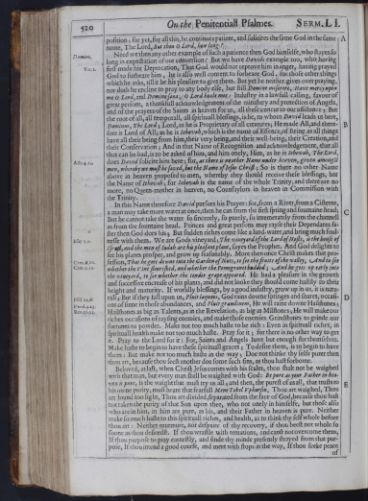 520
On the Penitentiall Psalmes.
Serm. LI.
position; for yet, for all this, he continues patient, and solicites the same God in the same
520
On the Penitentiall Psalmes.
Serm. LI.
position; for yet, for all this, he continues patient, and solicites the same God in the same
name, The Lord, But thou O Lord, how long?
Need we then any other example of such a patience then God himselfe, Domine. who stayes so
long in expectation of our conversion? But we have Davids example too, who having
first made his Deprecation, Ver. 1. That God would not reprove him in anger, having prayed
God to forbeare him, he is also well content to forbeare God, for those other things
which he asks, till it be his pleasure to give them. But yet he neither gives over praying,
nor doth he encline to pray to any body else, but still Domine miserere, Have mercy upon
me O Lord, and Domine sana, O Lord heale mee: Industry in a lawfull calling, favour of
great persons, a thankfull acknowledgement of the ministery and protection of Angels,
and of the prayers of the Saints in heaven for us, all these concur to our assistance; But
the root of all, all temporall, all spirituall blessings, is he, to whom David leads us here,
Dominus, The Lord; Lord, as he is Proprietary of all creatures; He made All, and there-
fore is Lord of All; as he is Iehovah, which is the name of Essence, of Being, as all things
have all their being from him, their very being, and their well-being, their Creation, and
their Conservation; And in that Name of Recognition and acknowledgement, that all
that can be had, is to be asked of him, and him onely, Him, as he is Iehovah, The Lord,
does David solicite him here;Acts 4.12. for, as there is no other Name under heaven, given amongst
men, whereby we must be saved, but the Name of Iesus Christ; So is there no other Name
above in heaven proposed to men, whereby they should receive these blessings, but
the Name of Iehovah; for Iehovah is the name of the whole Trinity, and there are no
more, no Queen-mother in heaven, no Counsaylors in heaven in Commission with
the Trinity.
In this Name therefore David pursues his Prayer: for, from a River, from a Cisterne,
a man may take more water at once, then he can from the first spring and fountaine head;
But he cannot take the water so sincerely, so purely, so intemerately from the channell
as from the fountaine head. Princes and great persons may rayse their Dependants fa-
ster then God does his; But sudden riches come like a land-water, and bring much foul-
nesse with them.Esay 5.7. We are Gods vineyard; The vineyard of the Lord of Hosts, is the house of
Israel, and the men of Iudah are his pleasant plant, sayes the Prophet. And God delights to
see his plants prosper, and grow up seasonably. More then once Christ makes that pro-
fession, That he goes downe into the Garden of Nuts,Cant. 6.10.
Cant. 7.12. to see the fruits of the valley, And to see
whether the Vine flourished, and whether the Pomegranet budded; And he goes up early into
the vineyard, to see whether the tender grape appeared. He had a pleasure in the growth
and successive encrease of his plants, and did not looke they should come hastily to their
height and maturity. If worldly blessings, by a good industry, grow up in us, it is natu-
rall; But if they fall upon us, Psal 11.6.
Exod. 9.23.
Rev. 16.21. Pluit laqueos, God rains downe springes and snares, occasi-
ons of sinne in those abundances, and Pluit grandinem, He will raine downe Hailstones;
Hailstones as big as Talents, as in the Revelation; as big as Milstones; He will make our
riches occasions of raysing enemies, and make those enemies Grindstones to grinde our
fortunes to powder. Make not too much haste to be rich: Even in spirituall riches, in
spirituall health make not too much haste. Pray for it; for there is no other way to get
it. Pray to the Lord for it: For, Saints and Angels have but enough for themselves.
Make haste to begin to have these spirituall graces; To desire them, is to begin to have
them: But make not too much haste in the way; Doe not thinke thy selfe purer then
thou art, because thou seest another doe some such sins, as thou hast forborne.
Beloved, at last, when Christ Jesus comes with his scales, thou shalt not be waighed
with that man, but every man shall be waighed with God: Be pure as your Father in hea-
ven is pure, is the waight that must try us all; and then, the purest of us all, that trusts to
his owne purity, must heare that fearfull Mene Tekel Vpharsin, Thou art waighed, Thou
art found too light, Thou art divided, separated from the face of God, because thou hast
not taken the purity of that Son upon thee, who not onely in himselfe, but those also
who are in him, in him are pure, as his, and their Father in heaven is pure. Neither
make so much haste to this spirituall riches, and health, as to think thy self whole before
thou art: Neither murmure, nor despaire of thy recovery, if thou beest not whole so
soone as thou desiredst. If thou wrastle with tentations, and canst not overcome them,
If thou purpose to pray earnestly, and finde thy minde presently strayed from that pur-
pose, If thou intend a good course, and meet with stops in the way, If thou seeke peace of
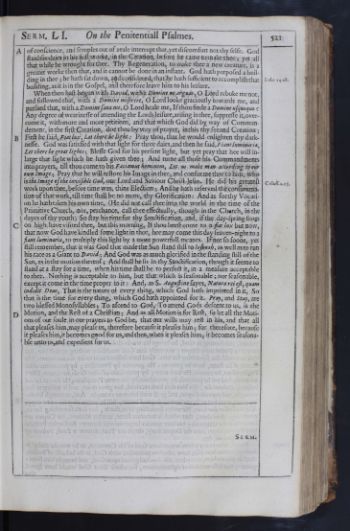 Serm. LI.
On the Penitentiall Psalmes.
521
of conscience, and scruples out of zeale interrupt that, yet discomfort not thy selfe. God
Serm. LI.
On the Penitentiall Psalmes.
521
of conscience, and scruples out of zeale interrupt that, yet discomfort not thy selfe. God
staid six daies in his first worke, in the Creation, before he came to make thee; yet all
that while he wrought for thee. Thy Regeneration, to make thee a new creature, is a
greater worke then that, and it cannot be done in an instant. God hath purposed a buil-
ding in thee; he hath sat down, and considered, Luke 14.28. that he hath sufficient to accomplish that
building, as it is in the Gospel, and therefore leave him to his leisure.
When thou hast begun with David, with a Domine ne arguas, O Lord rebuke me not,
and followed that, with a Domine miserere, O Lord looke graciously towards me, and
pursued that, with a Domine sana me, O Lord heale me, If thou finde a Domine usquequo?
Any degree of wearinesse of attending the Lords leisure, arising in thee, suppresse it, over-
come it, with more and more petitions, and that which God did by way of Comman-
dement, in the first Creation, doe thou by way of prayer, in this thy second Creation;
First he said, Fiat lux, Let there be light: Pray thou, that he would enlighten thy dark-
nesse. God was satisfied with that light for three daies, and then he said, Fiant luminaria,
Let there be great lights; Blesse God for his present light, but yet pray that hee will in-
large that light which he hath given thee; And turne all those his Commandments
into prayers, till thou come to his Faciamus hominem, Let us make man according to our
own Image; Pray that he will restore his Image in thee, and conforme thee to him, who
is the Image of the invisible God, our Lord and Saviour Christ Jesus.Coloss. 1.15. He did his greatest
work upon thee, before time was, thine Election; And he hath reserved the consumma-
tion of that work, till time shall be no more, thy Glorification: And as for thy Vocati-
on he hath taken his own time, (He did not call thee into the world in the time of the
Primitive Church, nor, perchance, call thee effectually, though in the Church, in the
dayes of thy youth) So stay his time for thy Sanctification, and, if the day-spring from
on high have visited thee, but this morning, If thou beest come to a fiat lux but now,
that now God have kindled some light in thee, hee may come this day seaven-night to a
siant luminaria, to multiply this light by a more powerfull meanes. If not so soone, yet
still remember, that it was God that made the Sun stand still to Ioshuah, as well as to run
his race as a Giant to David; And God was as much glorified in the standing still of the
Sun, as in the motion thereof; And shall be so in thy Sanctification, though it seeme to
stand at a stay for a time, when his time shall be to perfect it, in a measure acceptable
to thee. Nothing is acceptable to him, but that which is seasonable; nor seasonable,
except it come in the time proper to it: And, as S. Augustine sayes, Natura rei est, quam
indidit Deus, That is the nature of every thing, which God hath imprinted in it, So
that is the time for every thing, which God hath appointed for it. Pray, and Stay, are
two blessed Monosyllables; To ascend to God, To attend Gods descent to us, is the
Motion, and the Rest of a Christian; And as all Motion is for Rest, so let all the Moti-
ons of our soule in our prayers to God be, that our wills may rest in his, and that all
that pleases him, may please us, therefore because it pleases him; for therefore, because
it pleases him, it becomes good for us, and then, when it pleases him, it becomes seasona-
ble unto us, and expedient for us. Serm.
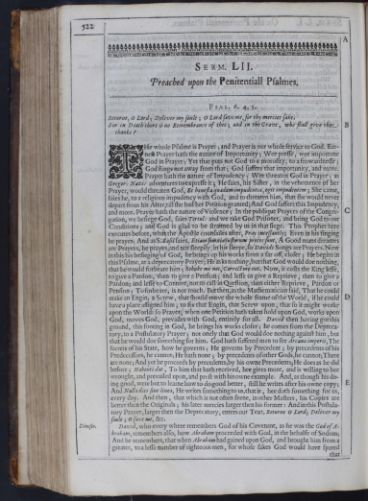 522
522
Serm. LII.
Preached upon the Penitentiall Psalmes.
Psal. 6. 4, 5.
Returne, O Lord; Deliver my soule; O Lord save me, for thy mercies sake.
For in Death there is no Remembrance of thee; and in the Grave, who shall give thee
thanks?
THe whole Psalme is Prayer; and Prayer is our whole service to God. Ear-
nest Prayer hath the nature of Importunity; Wee presse, wee importune
God in Prayer; Yet that puts not God to a morosity, to a frowardnesse;
God flings not away from that; God suffers that importunity, and more.
Prayer hath the nature of Impudency; Wee threaten God in Prayer; as
Gregor: Nazi: adventures to expresse it; He saies, his Sister, in the vehemence of her
Prayer, would threaten God, Et honesta quadam impudentiæ, egit impudentem; She came,
saies he, to a religious impudency with God, and to threaten him, that she would never
depart from his Altar, till she had her Petition granted; And God suffers this Impudency,
and more. Prayer hath the nature of Violence; In the publique Prayers of the Congre-
gation, we besiege God, saies Tertul: and we take God Prisoner, and bring God to our
Conditions; and God is glad to be straitned by us in that siege. This Prophet here
executes before, what the Apostle counsailes after, Pray incessantly; Even in his singing
he prayes; And as S. Basil saies, Etiam somniajustorum preces sunt, A Good mans dreames
are Prayers, he prayes, and not sleepily, in his sleepe, so Davids Songs are Prayers. Now
in this his besieging of God, he brings up his works from a far off, closer; He begins in
this Psalme, at a deprecatory Prayer; He asks nothing, but that God would doe nothing,
that he would forbeare him; Rebuke me not, Correct me not. Now, it costs the King lesse,
to give a Pardon, then to give a Pension; and lesse to give a Reprieve, then to give a
Pardon; and lesse to Connive, not to call in Question, then either Reprieve, Pardon or
Pension; To forbeare, is not much. But then, as the Mathematician said, That he could
make an Engin, a Screw, that should move the whole frame of the World, if he could
have a place assigned him, to fix that Engin, that Screw upon, that so it might worke
upon the World: so Prayer, when one Petition hath taken hold upon God, works upon
God, moves God, prevailes with God, entirely for all. David then having got this
ground, this footing in God, he brings his works closer; he comes from the Depreca-
tory, to a Postulatory Prayer; not onely that God would doe nothing against him, but
that he would doe something for him. God hath suffered man to see Arcana imperii, The
secrets of his State, how he governs; He governs by Precedent; by precedents of his
Predecessors, he cannot; He hath none; by precedents of other Gods, he cannot; There
are none; And yet he proceeds by precedents; by his owne Precedents; He does as he did
before; Habenti dat, To him that hath received, hee gives more, and is willing to bee
wrought, and prevailed upon, and prest with his owne example. And, as though his do-
ing good, were but to learne how to do good better, still he writes after his owne copy;
And Nulla dies sine linea, He writes something to us, that is, hee doth something for us,
every day. And then, that which is not often seene, in other Masters, his Copies are
better then the Originals; his later mercies larger then his former: And in this Postula-
tory Prayer, larger then the Deprecatory, enters our Text, Returne O Lord; Deliver my
soule; O save me, &c.
David,Divisio. who every where remembers God of his Covenant, as he was the God of A-
braham, remembers also, how Abraham proceeded with God, in the behalfe of Sodom;
And he remembers, that when Abraham had gained upon God, and brought him from a
greater, to a lesse number of righteous men, for whose sakes God would have spared that
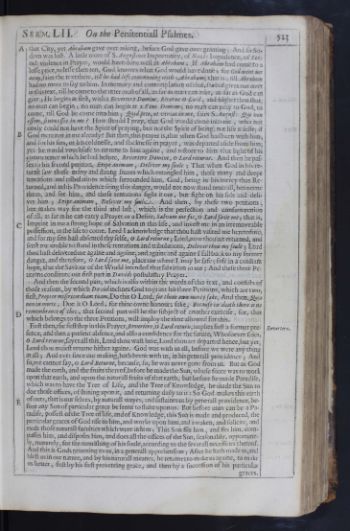 Serm. LII.
On the Penitentiall Psalmes.
523
that City, yet Abraham gave over asking, before God gave over granting; And so So-
Serm. LII.
On the Penitentiall Psalmes.
523
that City, yet Abraham gave over asking, before God gave over granting; And so So-dom was lost. A little more of S. Augustines Importunity, of Nazi: Impudence, of Ter-
tul: violence in Prayer, would have done well in Abraham; If Abraham had come to a
lesse price, to lesse then ten, God knowes what God would have done; for God went not
away, saies the text there, till he had left communing with Abraham; that is, till Abraham
had no more to say to him. In memory and contemplation of that, David gives not over
in this text, till he come to the utter most of all, as far as man can aske, as far as God can
give; He begins at first, with a Revertere Domine, Returne O Lord, and higher then that,
no man can begin; no man can begin at a Veni Domine; no man can pray to God, to
come, till God be come into him; Quid peto, ut venias in me, saies S. August: Qui non
essem, si nonesses in me? How should I pray, that God would come into me, who not
onely could not have the Spirit of praying, but not the Spirit of being, not life it selfe, if
God were not in me already? But then, this prayer is, that when God had been with him,
and for his sins, or his coldnesse, and slacknesse in prayer, was departed aside from him,
yet he would vouchsafe to returne to him againe, and restore to him that light of his
countenance which he had before, Revertere Domine, O Lord returne. And then he pas-
ses to his second petition, Eripe animam, Deliver my soule; That when God in his re-
turne saw those many and strong snares which entangled him, those many and deepe
tentations and tribulations which surrounded him, God, being in his mercy thus Re-
turned, and in his Providence seing this danger, would not now stand neutrall, betweene
them, and see him, and these tentations fight it our, but fight on his side and deli-
ver him; Eripe animam, Deliver my soule. And then, by these two petitions,
hee makes way for the third and last, which is the perfection and consummation
of all, as far as he can carry a Prayer or a Desire, Salvum me fac, O Lord save me; that is,
Imprint in me a strong hope of Salvation in this life, and invest me in an irremoveable
possession, in the life to come. Lord I acknowledge that thou hast visited me heretofore,
and for my sins hast absented thy selfe, O Lord returne; Lord, now thou art returned, and
seest me unable to stand in these tentations and tribulations, Deliver thou my soule; Lord
thou hast delivered me againe and againe, and againe and againe I fall back to my former
danger, and therefore, O Lord save me, place me where I may be safe; safe in a constant
hope, that the Saviour of the World intended that salvation to me; And these three Pe-
titions constitute our first part in Davids postulatory Prayer.
And then the second part, which is also within the words of this text, and consists of
those reasons, by which David inclines God to grant his three Petitions, which are two,
first, Propter misericordiam tuam, Do this O Lord, for thine own mercy sake, And then, Quia
non in morte, Doe it O Lord, for thine owne honours sake, Because in death there is no
remembrance of thee, that second part will be the subject of another exercise, for, that
which belongs to the three Petitions, will imploy the time allowed for this.
First then, the first step in this Prayer, Revertere, O Lord return, implies first a former pre-
sence, Revertere. and then a present absence, and also a confidence for the future; Whosoever saies,
O Lord returne, sayes all this, Lord thou wast here, Lord thou art departed hence, but yet,
Lord thou maiest returne hither againe. God was with us all, before we were any thing
at all; And ever since our making, hath beene with us, in his generall providence; And
so, we cannot say, O Lord Returne, because, so, he was never gone from us. But as God
made the earth, and the fruits thereof, before he made the Sun, whose force was to work
upon that earth, and upon the naturall fruits of that earth, but before he made Paradise,
which was to have the Tree of Life, and the Tree of Knowledge, he made the Sun to
doe those offices, of shining upon it, and returning daily to it: So God makes this earth
of ours, that is our selves, by naturall wayes, and sustaines us by generall providence, be-
fore any Son of particular grace be seene to shine upon us. But before man can be a Pa-
radise, possest of the Tree of life, and of Knowledge, this Sun is made and produced, the
particular graces of God rise to him, and worke upon him, and awaken, and solicite, and
exalt those naturall faculties which were in him; This Son fils him, and fits him, com-
passes him, and disposes him, and does all the offices of the Sun, seasonably, opportune-
ly, maturely, for the nourishing of his soule, according to the severall necessities thereof.
And this is Gods returning to us, in a generall apprehension; After he hath made us, and
blest us in our nature, and by his naturall meanes, he returnes to make us againe, to make
us better, first by his first preventing grace, and then by a succession of his particular graces.
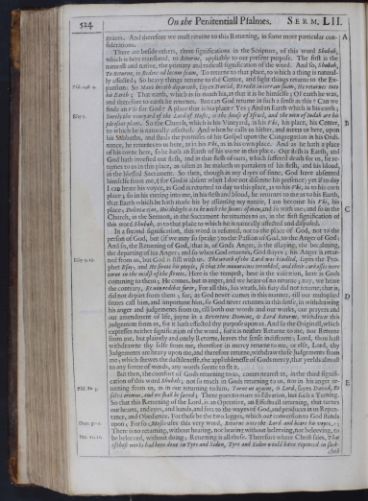 524
On the Penitentiall Psalmes.
Serm. LII.
graces. And therefore we must returne to this Returning, in some more particular con-
524
On the Penitentiall Psalmes.
Serm. LII.
graces. And therefore we must returne to this Returning, in some more particular con-siderations.
There are beside others, three significations in the Scripture, of this word Shubah,
which is here translated, to Returne, appliable to our present purpose. The first is the
naturall and native, the primary and radicall signification of the word. And so, Shubah,
To Returne, is Redire ad locum suum, To returne to that place, to which a thing is natural-
ly affected; So heavy things returne to the Center, and light things returne to the Ex-
pansion; So Mans breath departeth,Psal. 146.4. sayes David, Et redit in terr am suam, He returnes into
his Earth; That earth, which is so much his, as that it is he himselfe; Of earth he was,
and therefore to earth he returnes. But can God returne in such a sense as this? Can we
finde an Vbi for God? A place that is his place? Yes; And an Earth which is his earth;
Surely the vineyard of the Lord of Hosts,Esay 5. is the house of Israel, and the men of Iudah are his
pleasant plant. So the Church, which is his Vineyard, is his Vbi, his place, his Center,
to which he is naturally affected. And when he calls us hither, and meets us here, upon
his Sabbaths, and sheds the promises of his Gospel upon the Congregation in his Ordi-
nance, he returnes to us here, as in his Vbi, as in his own place. And as he hath a place
of his owne here, so he hath an Earth of his owne in this place. Our flesh is Earth, and
God hath invested our flesh, and in that flesh of ours, which suffered death for us, he re-
turnes to us in this place, as often as he maketh us partakers of his flesh, and his bloud,
in the blessed Sacrament. So then, though in my dayes of sinne, God have absented
himselfe from me, (for God is absent when I doe not discerne his presence) yet if to day
I can heare his voyce, as God is returned to day to this place, as to his Vbi, as to his own
place; so in his entring into me, in his flesh and bloud, he returnes to me as to his Earth,
that Earth which he hath made his by assuming my nature, I am become his Vbi, his
place; Delitiæ ejus, His delight is to be with the sonnes of men, and so with me; and so in the
Church, in the Sermon, in the Sacrament he returnes to us, in the first signification of
this word Shubah, as to that place to which he is naturally affected and disposed.
In a second signification, this word is referred, not to the place of God, not to the
person of God, but (if we may so speake) to the Passion of God, to the Anger of God;
And so, the Returning of God, that is, of Gods Anger, is the allaying, the becalming,
the departing of his Anger; and so when God returnes, God stayes; his Anger is retur-
ned from us, Esay 5.25. but God is still with us. The wrath of the Lord was kindled, sayes the Pro-
phet Esay; and He smote his people, so that the mountaines trembled, and their carkasses were
torne in the midst of the streets. Here is the tempest, here is the visitation, here is Gods
comming to them; He comes, but in anger, and we heare of no returne; nay, we heare
the contrary, Et non redibat furor, For all this, his wrath, his fury did not returne, that is,
did not depart from them; for, as God never comes in this manner, till our multiplied
sinnes call him, and importune him, so God never returnes in this sense, in withdrawing
his anger and judgements from us, till both our words and our works, our prayers and
our amendment of life, joyne in a Revertere Domine, O Lord Returne, withdraw this
judgement from us, for it hath effected thy purpose upon us. And so the Originall, which
expresses neither signification of the word, for it is neither Returne to me, nor Returne
from me, but plainely and onely Returne, leaves the sense indifferent; Lord, thou hast
withdrawne thy selfe from me, therefore in mercy returne to me, or else, Lord, thy
Judgements are heavy upon me, and therefore returne, withdraw these Judgements from
me; which shewes the ductilenesse, the appliablenesse of Gods mercy, that yeelds almost
to any forme of words, any words seeme to fit it.
But then, the comfort of Gods returning to us, comes nearest us, in the third signifi-
cation of this word Shubah; not so much in Gods returning to us, nor in his anger re-
turning from us, Psal. 80.3. as in our returning to him, Turne us againe, O Lord, sayes David, Et
salvi erimus, and we shall be saved; There goes no more to salvation, but such a Turning.
So that this Returning of the Lord, is an Operative, an Effectuall returning, that turnes
our hearts, and eyes, and hands, and feet to the wayes of God, and produces in us Repen-
tance, and Obedience. For these be the two legges, which our conversion to God stands
upon;Deut. 30.2. For so Moses uses this very word, Returne unto the Lord and heare his voyce;
There is no returning, without hearing, nor hearing without beleeving, nor beleeving, to
be beleeved, Mat. 11.21. without doing; Returning is all these. Therefore where Christ saies, That
if those works had been done in Tyre and Sidon, Tyre and Sidon would have repented in sack- cloth
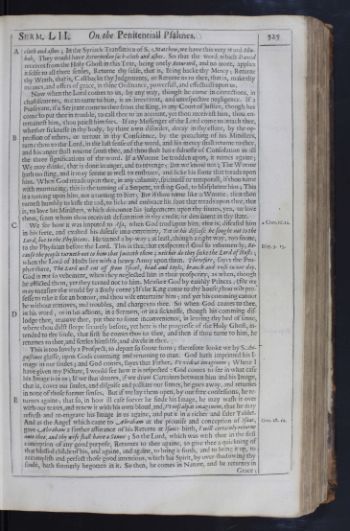 Serm. LII.
On the Penitentiall Psalmes.
525
cloth and ashes; In the Syriack Translation of S. Matthew, we have this very word Shu-
Serm. LII.
On the Penitentiall Psalmes.
525
cloth and ashes; In the Syriack Translation of S. Matthew, we have this very word Shu-bah, They would have Returned in sack-cloth and ashes. So that the word which David
receives from the Holy Ghost in this Text, being onely Returned, and no more, applies
it selfe to all three senses, Returne thy selfe, that is, Bring backe thy Mercy; Returne
thy Wrath, that is, Call backe thy Judgements, or Returne us to thee, that is, make thy
meanes, and offers of grace, in thine Ordinance, powerfull, and effectuall upon us.
Now when the Lord comes to us, by any way, though he come in corrections, in
chastisements, not to turne to him, is an irreverent, and unrespective negligence. If a
Pursevant, if a Serjeant come to thee from the King, in any Court of Justice, though hee
come to put thee in trouble, to call thee to an account, yet thou receivest him, thou en-
tertainest him, thou paiest him fees. If any Messenger of the Lord come to attach thee,
whether sicknesse in thy body, by thine own disorder, decay in thy estate, by the op-
pression of others, or terrour in thy Conscience, by the preaching of his Ministers,
turne thou to the Lord, in the last sense of the word, and his mercy shall returne to thee,
and his anger shall returne from thee, and thou shalt have fulnesse of Consolation in all
the three significations of the word. If a Worme be trodden upon, it turnes againe;
We may thinke, that is done in anger, and to revenge; But we know not; The Worme
hath no sting, and it may seeme as well to embrace, and licke his foote that treads upon
him. When God treads upon thee, in any calamity, spirituall or temporall, if thou turne
with murmuring, this is the turning of a Serpent, to sting God, to blaspheme him; This
is a turning upon him, not a turning to him; But if thou turne like a Worme, then thou
turnest humbly to kisse the rod, to licke and embrace his foot that treads upon thee, that
is, to love his Ministers, which denounce his judgements upon thy sinnes, yea, to love
them, from whom thou receivest defamation in thy credit, or detriment in thy state.
We see how it was imputed to Asa, when God trod upon him, that is, 2 Chro. 16.12. diseased him
in his feete, and exalted his disease into extremity, Yet in his disease he sought not to the
Lord, but to the Physitians. He turned a by-way; at least, though a right way, too soone,
to the Physitian before the Lord. This is that, that exasperated God so vehemently, Esay. 9.13. Be-
cause the people turneth not to him that smiteth them; neither do they seeke the Lord of Hosts;
when the Lord of Hosts lies with a heavy Army upon them. Therefore, sayes the Pro-
phet there, The Lord will cut off from Israel, head and tayle, branch and rush in one day.
God is not so vehement, when they neglected him in their prosperity, as when, though
he afflicted them, yet they turned not to him. Measure God by earthly Princes; (for we
may measure the world by a Barly corne) If the King come to thy house, thou wilt pro-
fesse to take it for an honour, and thou wilt entertaine him; and yet his comming cannot
be without removes, and troubles, and charges to thee. So when God comes to thee,
in his word, or in his actions, in a Sermon, or in a sicknesse, though his comming dis-
lodge thee, remove thee, put thee to some inconvenience, in leaving thy bed of sinne,
where thou didst sleepe securely before, yet here is the progresse of the Holy Ghost, in-
tended to thy soule, that first he comes thus to thee, and then if thou turne to him, he
returnes to thee, and settles himselfe, and dwels in thee.
This is too lovely a Prospect, to depart so soone from; therefore looke we by S. Au-
gustines glasse, upon Gods comming and returning to man. God hath imprinted his I-
mage in our soules; and God comes, sayes that Father, Vt videat imaginem; Where I
have given my Picture, I would see how it is respected: God comes to see in what case
his Image is in us; If we shut doores, if we draw Curtaines between him and his Image,
that is, cover our soules, and disguise and palliate our sinnes, he goes away, and returnes
in none of those former senses. But if we lay them open, by our free confessions, he re-
turnes againe; that so, in how ill case soever he finde his Image, he may wash it over
with our teares, and renew it with his own bloud, and, Vt resculpat imaginem, that he may
refresh and re-engrave his Image in us againe, and put it in a richer and safer Tablet.
And as the Angel which came to Abraham at the promise and conception of Isaac,
Gen. 18.10. gave Abraham a farther assurance of his Returne at Isaacs birth, I will certainly returne
unto thee, and thy wife shall have a Sonne; So the Lord, which was with thee in the first
conception of any good purpose, Returnes to thee againe, to give thee a quickning of
that blessed childe of his, and againe, and againe, to bring it forth, and to bring it up, to
accomplish and perfect those good intentions, which his Spirit, by over-shadowing thy
soule, hath formerly begotten in it. So then, he comes in Nature, and he returnes in Grace;
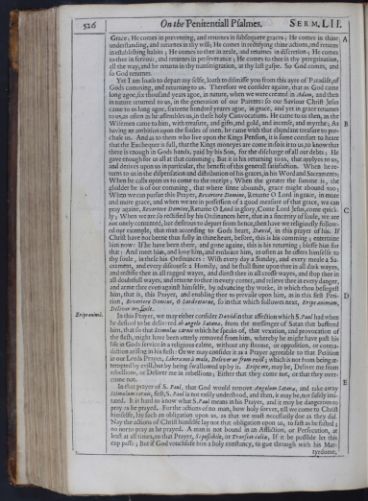 526
On the Penitentiall Psalmes.
Serm. LII.
Grace; He comes in preventing, and returnes in subsequent graces; He comes in thine
526
On the Penitentiall Psalmes.
Serm. LII.
Grace; He comes in preventing, and returnes in subsequent graces; He comes in thine
understanding, and returnes in thy will; He comes in rectifying thine actions, and returns
in establishing habits; He comes to thee in zeale, and returnes in discretion; He comes
to thee in fervour, and returnes in perseverance; He comes to thee in thy peregrination,
all the way, and he returns in thy transmigration, at thy last gaspe. So God comes, and
so God returnes.
Yet I am loath to depart my selfe, loath to dismisse you from this ayre of Paradise, of
Gods comming, and returning to us. Therefore we consider againe, that as God came
long agoe, six thousand years agoe, in nature, when we were created in Adam, and then
in nature returned to us, in the generation of our Parents: so our Saviour Christ Jesus
came to us long agoe, sixteene hundred yeares agoe, in grace, and yet in grace returnes
to us, as often as he assembles us, in these holy Convocations. He came to us then, as the
Wisemen came to him, with treasure, and gifts, and gold, and incense, and myrrhe; As
having an ambition upon the soules of men, he came with that abundant treasure to pur-
chase us. And as to them who live upon the Kings Pension, it is some comfort to heare
that the Exchequer is full, that the Kings moneyes are come in: so is it to us, to know that
there is enough in Gods hands, paid by his Son, for the discharge of all our debts; He
gave enough for us all at that comming; But it is his returning to us, that applyes to us,
and derives upon us in particular, the benefit of this generall satisfaction. When he re-
turns to us in the dispensation and distribution of his graces, in his Word and Sacraments;
When he calls upon us to come to the receipt; When the greater the summe is, the
gladder he is of our comming, that where sinne abounds, grace might abound too;
When we can pursue this Prayer, Revertere Domine, Returne O Lord in grace, in more
and more grace, and when we are in possession of a good measure of that grace, we can
pray againe, Revertere Domine, Returne O Lord in glory, Come Lord Jesus, come quick-
ly; When we are so rectified by his Ordinances here, that in a sincerity of soule, we are
not onely contented, but desirous to depart from hence, then have we religiously follow-
ed our example, that man according to Gods heart, David, in this prayer of his. If
Christ have not beene thus fully in thine heart, before, this is his comming; entertaine
him now: If he have been there, and gone againe, this is his returning; blesse him for
that: And meet him, and love him, and embrace him, as often as he offers himselfe to
thy soule, in these his Ordinances: Wish every day a Sunday, and every meale a Sa-
crament, and every discourse a Homily, and he shall shine upon thee in all dark wayes,
and rectifie thee in all ragged wayes, and direct thee in all crosse wayes, and stop thee in
all doubtfull wayes, and returne to thee in every corner, and relieve thee in every danger,
and arme thee even against himselfe, by advancing thy worke, in which thou besiegest
him, that is, this Prayer, and enabling thee to prevaile upon him, as in this first Peti-
tion, Revertere Domine, O Lord returne, so in that which followes next, Eripe animam,
Deliver my soule.
In this Prayer, Eripo animā. we may either consider David in that affection which S. Paul had when
he desired to be delivered ab angelo Satanæ, from the messenger of Satan that buffeted
him, that so that Stimulus carnis which he speaks of, that vexation, and provocation of
the flesh, might have been utterly removed from him, whereby he might have past his
life in Gods service in a religious calme, without any storme, or opposition, or contra-
diction arising in his flesh: Or we may consider it as a Prayer agreeable to that Petition
in our Lords Prayer, Libera nos à malo, Deliver us from evill; which is not from being at-
tempted by evill, but by being swallowed up by it. Eripe me, may be, Deliver me from
rebellions, or Deliver me in rebellions; Either that they come not, or that they over-
come not.
In that prayer of S. Paul, that God would remove Angelum Satanæ, and take away
Stimulum carnis, first, S. Paul is not easily understood, and then, it may be, not safely imi-
tated. It is hard to know what S. Paul means in his Prayer, and it may be dangerous to
pray as he prayed. For the actions of no man, how holy soever, till we come to Christ
himselfe, lay such an obligation upon us, as that we must necessarily doe as they did.
Nay the actions of Christ himselfe lay not that obligation upon us, to fast as he fasted;
no nor to pray as he prayed. A man is not bound in an Affliction, or Persecution, at
least at all times, to that Prayer, Si possibile, or Transeat calix, If it be possible let this
cup passe; But if God vouchsafe him a holy constancy, to goe through with his Mar-
tyrdome,
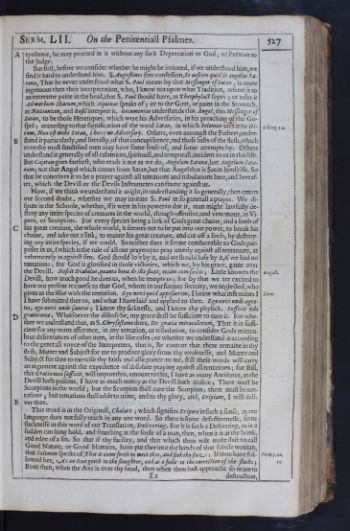 Serm. LII.
On the Penitentiall Psalmes.
527
tyrdome, he may proceed in it without any such Deprecation to God, or Petition to
Serm. LII.
On the Penitentiall Psalmes.
527
tyrdome, he may proceed in it without any such Deprecation to God, or Petition to
the Judge.
But first, before we consider whether he might be imitated, if we understood him, we
find it hard to understand him. S. Augustines free confession, Se nescire quid sit angelus Sa-
tanæ, That he never understood what S. Paul meant by that Messenger of Satan, is more
ingenuous then their interpretation, who, I know not upon what Tradition, referre it to
an extreame paine in the head, that S. Paul should have, as Theophylact sayes; or refer it
Ad morbum Iliacum, which Aquinas speaks of, or to the Gout, or pains in the Stomach,
as Nazianzen, and Basil interpret it. Oecumenius understands this Angel, this Messenger of
Satan, to be those Heretiques, which were his Adversaries, in his preaching of the Go-
spel; according to that signification of the word Satan, in which Solomon uses it to Hi-
ram,1 King. 5.4. Non est mihi Satan, I have no Adversary. Others, even amongst the Fathers, under-
stand it particularly, and literally, of that concupiscence, and those lusts of the flesh, which
even the most sanctified men may have some sense of, and some attempts by. Others
understand it generally of all calamities, spirituall, and temporall, incident to us in this life.
But Cajetan goes farthest, who reads it not as we do, Angelum Satanæ, but Angelum Sata-
nam; not that Angel which comes from Satan, but that Angel that is Satan himselfe. So
that he conceives it to be a prayer against all tentations and tribulations here, and hereaf-
ter, which the Devill or the Devils Instruments can frame against us.
Now, if we think we understand it aright, in understanding it so generally, then enters
our second doubt, whether we may imitate S. Paul in so generall a prayer. We di-
spute in the Schoole, whether, if it were in his power to doe it, man might lawfully de-
stroy any intire species of creatures in the world, though offensive, and venemous, as Vi-
pers, or Scorpions. For every species being a link of Gods great chaine, and a limb of
his great creature, the whole world, it seemes not to be put into our power, to break his
chaine, and take out a link, to maime his great creature, and cut off a limb, by destroy-
ing any intire species, if we could. So neither does it seeme conduceable to Gods pur-
poses in us, (which is the rule of all our prayers) to pray utterly against all tentations, as
vehemently as against sins. God should lose by it, and we should lose by it, if we had no
tentations; for God is glorified in those victories, which we, by his grace, gaine over
the Devill. Nescit Diabolus, quant a bona de illo fiunt, etiam cum sævit;August. Little knowes the
Devill, how much good he does us, when he tempts us; for by that we are excited to
have our present recourse to that God, whom in our former security, we neglected, who
gives us the issue with the tentation. Ego novi quid apposuerim,Idem. I know what infirmities I
I have submitted thee to, and what I have laid and applied to thee. Ego novi unde ægro-
tes, ego novi unde saneris; I know thy sicknesse, and I know thy physick. Sufficit tibi
gratiamea; Whatsoever the disease be, my grace shall be sufficient to cure it. For whe-
ther we understand that, as S. Chrysostome does, De gratia miraculorum, That it is suffi-
cient for any mans assurance, in any tentation, or tribulation, to consider Gods miracu-
lous deliverances of other men, in the like cases; or whether we understand it according
to the generall voyce of the Interpreters, that is, Be content that there remaine in thy
flesh, Matter and Subject for me to produce glory from thy weaknesse, and Matter and
Subject for thee to exercise thy faith and allegeance to me, still these words will carry
an argument against the expedience of absolute praying against all tentations; for still,
this Gratiamea sufficit, will import this, amount to this, I have as many Antidotes, as the
Devill hath poisons, I have as much mercy as the Devill hath malice; There must be
Scorpions in the world; but the Scorpion shall cure the Scorpion; there must be ten-
tations; but tentations shall adde to mine, and to thy glory, and, Eripiam, I will deli-
ver thee.
This word is in the Originall, Chalatz; which signifies Eripere in such a sense, as our
language does not fully reach in any one word. So there is some defectivenesse, some
slacknesse in this word of our Translation, Delivering. For it is such a Delivering, as is a
sudden catching hold, and snatching at the soule of a man, then, when it is at the brink,
and edge of a sin. So that if thy facility, and that which thou wilt make shift to call
Good Nature, or Good Manners, have put thee into the hands of that subtile woman,
that Solomon speaks of, That is come forth to mectmeet thee, and seek thy face;Prov. 7.10.
15. If thou have fol-
lowed her, As an Oxe goeth to the slaughter, and as a foole to the correction of the stocks;
Even then, when the Axe is over thy head, then when thou hast approacht so neare to Zz destruction,
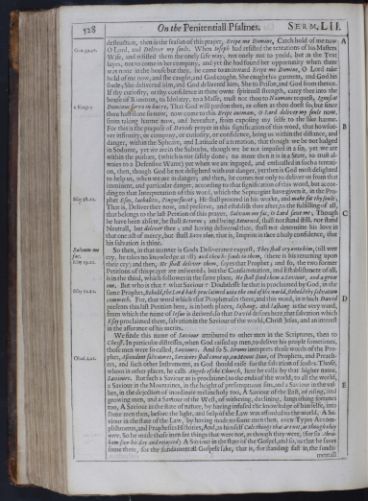 528
On the Penitentiall Psalmes.
Serm. LII.
destruction, then is the season of this prayer, Eripe me Domine, Catch hold of me now
528
On the Penitentiall Psalmes.
Serm. LII.
destruction, then is the season of this prayer, Eripe me Domine, Catch hold of me now
O Lord, Gen. 39.10. and Deliver my soule. When Ioseph had resisted the tentations of his Masters
Wife, and resisted them the onely safe way, not onely not to yeeld, but as the Text
sayes, not to come in her company, and yet she had found her opportunity when there
was none in the house but they, he came to an inward Eripe me Domine, O Lord take
hold of me now, and she caught, and God caught; She caught his garment, and God his
soule; She delivered him, and God delivered him; She to Prison, and God from thence.
If thy curiosity, or thy considence in thine owne spirituall strength, carry thee into the
house of Rimmon, to Idolatry, to a Masse, trust not thou to Naamans request, Ignoscat
Dominus servo in bacre,2 Kings 5. That God will pardon thee, as often as thou doest so; but since
thou hast done so now, now come to this Eripe animam, O Lord deliver my soule now,
from taking harme now, and hereafter, from exposing my selfe to the like harme.
For this is the purpose of Davids prayer in this signification of this word, that howsoe-
ver infirmity, or company, or curiosity, or confidence, bring us within the distance, and
danger, within the Spheare, and Latitude of a tentation, that though we be not lodged
in Sodome, yet we are in the Suburbs, though we be not impailed in a sin, yet we are
within the purlues, (which is not safely done; no more then it is in a State, to trust al-
waies to a Defensive Warre) yet when we are ingaged, and enthralled in such a tentati-
on, then, though God be not delighted with our danger, yet then is God most delighted
to help us, when we are in danger; and then, he comes not only to deliver us from that
imminent, and particular danger, according to that signification of this word, but accor-
ding to that Interpretation of this word, which the Septuagint have given it, in the Pro-
phet Esay, Esay 58.11. Iachalitz, Pinguefaciet; He shall proceed in his worke, and make fat thy soule;
That is, Deliver thee now, and preserve, and establish thee after, to the fulfilling of all,
that belongs to the last Petition of this prayer, Salvum me fac, O Lord save me; Though
he have been absent, he shall Returne; and being Returned, shall not stand still, nor stand
Neutrall, but deliver thee; and having delivered thee, shall not determine his love in
that one act of mercy, but shall Save thee, that is, Imprint in thee a holy confidence, that
his salvation is thine.
So then, Salvum me
fac.
Esay 19.20. in that manner is Gods Deliverance exprest, They shall cry unto him, (till wee
cry, he takes no knowledge at all) and then he sends to them, (there is his returning upon
their cry) and then, He shall deliver them, sayes that Prophet; and so, the two former
Petitions of this prayer are answered; but the Consummation, and Establishment of all,
is in the third, which followes in the same place, He shall send them a Saviour, and a great
one.Esay 62.11. But who is that? what Saviour? Doubtlesse he that is proclaimed by God, in the
same Prophet, Behold, the Lord hath proclaimed unto the end of the world, Behold thy salvation
commeth. For, that word which that Prophet uses there, and this word, in which David
presents this last Petition here, is in both places, Iashang, and Iashang is the very word,
from which the name of Iesus is derived; so that David desires here, that salvation which
Esay proclaimed there, salvation in the Saviour of the world, Christ Jesus, and an interest
in the assurance of his merits.
We finde this name of Saviour attributed to other men in the Scriptures, then to
Christ. In particular distresses, when God raised up men, to deliver his people sometimes,
those men were so called, Saviours. And so S. Ierome interprets those words of the Pro-
phet, Ascendent salvatores,Obad. 1.21. Saviours shall come up, on Mount Sion, of Prophets, and Preach-
ers, and such other Instruments, as God should raise for the salvation of soules. Those,
whom in other places, he calls Angels of the Church, here he calls by that higher name,
Saviours. But such a Saviour as is proclaimed to the ends of the world, to all the world,
a Saviour in the Mountaines, in the height of presumptuous sins, and a Saviour in the val-
lies, in the dejection of inordinate melancholy too, A Saviour of the East, of rising, and
growing men, and a Saviour of the West, of withering, declining, languishing fortunes
too, A Saviour in the state of nature, by having infused the knowledge of himselfe, into
some men then, before the light, and help of the Law was afforded to the world, A Sa-
viour in the state of the Law, by having made to some men then, even Types Accom-
plishments, and Prophesies Histories, And, as himself Cals things that are not, as though they
were, So he made those men see things that were not, as though they were, (for so Abra-
ham saw his day and rejoyced) A Saviour in the state of the Gospel, and so, as that he saves
some there, for the fundamentall Gospels sake, that is, for standing fast in the funda-
mentall
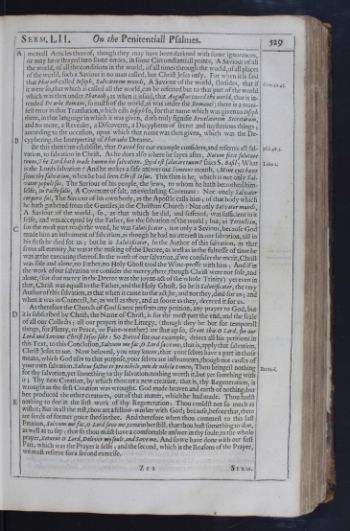 Serm. LII.
On the Penitentiall Psalmes.
529
mentall Articles thereof, though they may have been darkned with some ignorances,
Serm. LII.
On the Penitentiall Psalmes.
529
mentall Articles thereof, though they may have been darkned with some ignorances,
or may have strayed into some errors, in some Circumstantiall points, A Saviour of all
the world, of all the conditions in the world, of all times through the world, of all places
of the world, such a Saviour is no man called, but Christ Jesus only. For when it is said
that Pharaoh called Ioseph, Salvatorem mundi, A Saviour of the world, (besides, Gen. 41.45. that if
it were so, that which is called all the world, can be referred but to that part of the world
which was then under Pharaoh; as when it is said, that Augustus taxed the world, that is in-
tended De orbe Romano, so much of the world, as was under the Romanes) there is a mani-
fest error in that Translation, which cals Ioseph so, for that name which was given to Ioseph
there, in that language in which it was given, doth truly signifie Revelatorem Secretorum,
and no more, a Revealer, a Discoverer, a Decypherer of secret and mysterious things;
according to the occasion, upon which that name was then given, which was the De-
cyphering, the Interpreting of Pharaohs Dreame.
Be this then thus establisht, that David for our example considers, and referres all sal-
vation, Psal. 98.2. to salvation in Christ. As he does also where he sayes after, Notum fecit salutare
tuum, The Lord hath made known his salvation. Quid est salutare tuum? saies S. Basil;Luke 2. What
is the Lords salvation? And he makes a safe answer out Simeons mouth, Mine eyes have
seene thy salvation, when he had seen Christ Iesus. This then is he, which is not only Sat-
vator populi sui, The Saviour of his people, the Jews, to whom he hath betrothed him-
selfe, In Pacto salis, A Covenant of salt, an everlasting Covenant: Nor onely Salvator
corporis sui, The Saviour of his own body, as the Apostle calls him; of that body which
he hath gathered from the Gentiles, in the Christian Church: Nor only Salvator mundi,
A Saviour of the world, so, as that which he did, and suffered, was sufficient in it
selfe, and was accepted by the Father, for the salvation of the world; but, as Tertullian,
for the most part reads the word, he was Salutificator; not only a Saviour, because God
made him an instrument of salvation, as though he had no interest in our salvation, till in
his flesh he died for us; but he is Salutificator, so the Author of this salvation, as that
from all eternity, he was at the making of the Decree, as well as in the fulnesse of time he
was at the executing thereof. In the work of our salvation, if we consider the merit, Christ
was sole and alone, no Father, no Holy Ghost trod the Wine-presse with him; And if in
the work of our salvation we consider the mercy, there, though Christ were not sole, and
alone, (for that mercy in the Decree was the joynt-act of the whole Trinity) yet even in
that, Christ was equall to the Father, and the Holy Ghost. So he is Salutificator, the very
Author of this salvation, as that when it came to the act, he, and not they, died for us; and
when it was in Councell, he, as well as they, and as soone as they, decreed it for us.
As therefore the Church of God scarce presents any petition, any prayer to God, but
it is subscribed by Christ; the Name of Christ, is for the most part the end, and the seale
of all our Collects; all our prayers in the Liturgy, (though they be but for temporall
things, for Plenty, or Peace, or Faire-weather) are shut up so, Grant this O Lord, for our
Lord and Saviour Christ Iesus sake: So David for our example, drives all his petitions in
this Text, to this Conclusion, Salvum me fac, O Lord save me; that is, apply that salvation,
Christ Jesus to me. Now beloved, you may know, that your selves have a part in those
means, which God uses to that purpose, your selves are instruments, though not causes of
your own salvation. Salvus factus es pro nihilo, non de nihilo tamen;Bernard. Thou bringest nothing
for thy salvation, yet something to thy salvation; nothing worth it, but yet somthing with
it; Thy new Creation, by which thou art a new creature, that is, thy Regeneration, is
wrought as the first Creation was wrought. God made heaven and earth of nothing; but
hee produced the other creatures, out of that matter, which he had made. Thou hadst
nothing to doe in the first work of thy Regeneration; Thou couldst not so much as
wish it; But in all the rest, thou art a fellow-worker with God; because, before that, there
are seeds of former grace shed in thee. And therefore when thou commest to this last
Petition, Salvum me fac, O Lord save me, remember still, that thou hast something to doe,
as well as to say; that so thou maist have a comfortable answer in thy soule, to the whole
prayer, Returne O Lord, Deliver my soule, and Save me. And so we have done with our first
Part, which was the Prayer it selfe; and the second, which is the Reasons of the Prayer,
we must reserve for a second exercise. Zz2 Serm.
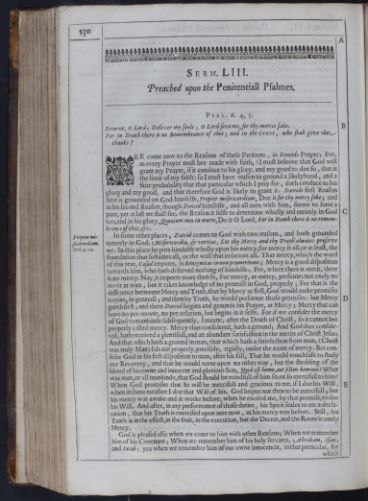 530
530
Serm. LIII.
Preached upon the Penitentiall Psalmes.
Psal. 6.4, 5.
Returne, O Lord; Deliver my soule; O Lord save me, for thy mercie sake.
For in Death there is no Remembrance of thee; and in the Grave, who shall give thee
thanks?
WEEWe come now to the Reasons of these Petitions, in Davids Prayer; For,
as every Prayer must bee made with faith, (I must beleeve that God will
grant my Prayer, if it conduce to his glory, and my good to doe so, that is
the limit of my faith) so I must have reason to ground a likelyhood, and a
faire probability that that particular which I pray for, doth conduce to his
glory and my good, and that therefore God is likely to grant it. Davids first Reason
here is grounded on God himselfe, Propter misericordiam, Doe it for thy mercy sake; and
in his second Reason, though David himselfe, and all men with him, seeme to have a
part, yet at last we shall see, the Reason it selfe to determine wholly and entirely in God
too, and in his glory, Quoniam non in morte, Do it O Lord, For in Death there is no remem-
brance of thee, &c.
In some other places, Propter mi-
sericordiam.
Psal. 40.11. David comes to God with two reasons, and both grounded
meerely in God; Misericordia, & veritas, Let thy Mercy and thy Truth alwaies preserve
me. In this place he puts himselfe wholly upon his mercy, for mercy is all, or at least, the
foundation that sustaines all, or the wall that imbraces all. That mercy, which the word
of this text, Casad imports, is Benignitas in non promeritum; Mercy is a good disposition
towards him, who hath deserved nothing of himselfe; For, where there is merit, there
is no mercy. Nay, it imports more then so, For mercy, as mercy, presumes not onely no
merit in man, but it takes knowledge of no promise in God, properly; For that is the
difference betweene Mercy and Truth, that by Mercy at first, God would make promises
to man, in generall; and then by Truth, he would performe those promises: but Mercy
goeth first; and there David begins and grounds his Prayer, at Mercy; Mercy that can
have no pre-mover, no pre-relation, but begins in it selfe. For if we consider the mercy
of God to mankinde subsequently, I meane, after the Death of Christ, so it cannot bee
properly called mercy. Mercy thus considered, hath a ground; And God thus conside-
red, hath received a plentifull, and an abundant satisfaction in the merits of Christ Jesus;
And that which hath a ground in man, that which hath a satisfaction from man, (Christ
was truly Man) fals not properly, precisely, rigidly, under the name of mercy. But con-
sider God in his first disposition to man, after his fall, That he would vouchsafe to study
our Recovery, and that he would turne upon no other way, but the shedding of the
blood of his owne and innocent and glorious Son, Quid est homo, aut filius hominis? What
was man, or all mankinde, that God should be mindfull of him so, or so mercifull to him?
When God promises that he will be mercifull and gracious to me, if I doe his Will,
when in some measure I doe that Will of his, God begins not then to be mercifull; but
his mercy was awake and at worke before, when he excited me, by that promise, to doe
his Will. And after, in my performance of those duties, his Spirit seales to me a decla-
ration, that his Truth is exercised upon mee now, as his mercy was before. Still, his
Truth is in the effect, in the fruit, in the execution, but the Decree, and the Roote is onely
Mercy.
God is pleased also when we come to him with other Reasons; When we remember
him of his Covenant; When we remember him of his holy servants, Abraham, Isaac,
and Iacob; yea when we remember him of our owne innocencie, in that particular, for which
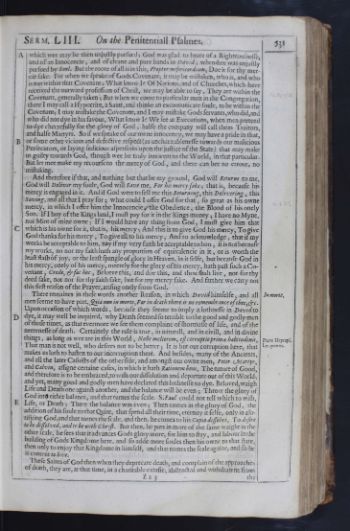 Serm. LII.
On the Penitentiall Psalmes.
531
which wee may be then unjustly pursued; God was glad to heare of a Righteousnesse,
Serm. LII.
On the Penitentiall Psalmes.
531
which wee may be then unjustly pursued; God was glad to heare of a Righteousnesse,
and of an Innocencie, and of cleane and pure hands in David, when hee was unjustly
pursued by Saul. But the roote of all is in this, Propter misericordiam, Doe it for thy mer-
cie sake. For when we speake of Gods Covenant, it may be mistaken, who is, and who
is not within that Covenant; What know I? Of Nations, and of Churches, which have
received the outward profession of Christ, we may be able to say, They are within the
Covenant, generally taken; But when we come to particular men in the Congregation,
there I may call a Hypocrite, a Saint, and thinke an excomunicate soule, to be within the
Covenant; I may mistake the Covenant, and I may mistake Gods servants, who did, and
who did not dye in his favour, What know I? We see at Executions, when men pretend
to dye cheerefully for the glory of God, halfe the company will call them Traitors,
and halfe Martyrs. So if we speake of our owne innocency, we may have a pride in that,
or some other vicious and defective respect (as uncharitablenesse towards our malicious
Persecutors, or laying seditious aspersions upon the justice of the State) that may make
us guilty towards God, though wee be truly innocent to the World, in that particular.
But let mee make my recourse to the mercy of God, and there can bee no errour, no
mistaking.
And therefore if that, and nothing but that be my ground, God will Returne to me,
God will Deliver my soule, God will Save me, For his mercy sake; that is, because his
mercy is engaged in it. And if God were to sell me this Returning, this Delivering, this
Saving, and all that I pray for; what could I offer God for that, so great as his owne
mercy, in which I offer him the Innocencie, the Obedience, the Blood of his onely
Son. If I buy of the Kings land, I must pay for it in the Kings money; I have no Myne,
nor Mint of mine owne; If I would have any thing from God, I must give him that
which is his owne for it, that is, his mercy; And this is to give God his mercy, To give
God thanks for his mercy, To give all to his mercy, And to acknowledge, that if my
works be acceptable to him, nay if my very faith be acceptable to him, it is not because
my works, no nor my faith hath any proportion of equivalencie in it, or is worth the
least flash of joy, or the least spangle of glory in Heaven, in it selfe, but because God in
his mercy, onely of his mercy, meerely for the glory of his mercy, hath past such a Co-
venant, Crede, & fac hoc, Beleeve this, and doe this, and thou shalt live, not for thy
deed sake, not nor for thy faith sake, but for my mercy sake. And farther we carry not
this first reason of the Prayer, arising onely from God.
There remaines in these words another Reason, In morte. in which David himselfe, and all
men seeme to have part, Quia non in morte, For in death there is no remembrance of thee, &c.
Upon occasion of which words, because they seeme to imply a lothnesse in David to
dye, it may well be inquired, why Death seemed so terrible to the good and godly men
of those times, as that evermore we see them complaine of shortnesse of life, and of the
neerenesse of death. Certainely the rule is true, in naturall, and in civill, and in divine
things, as long as wee are in this World, Nolle meliorem, est corruptio primæ habitudinis,
Picus Heptapl.
l. 7. proem. That man is not well, who desires not to be better; It is but our corruption here, that
makes us loth to hasten to our incorruption there. And besides, many of the Ancients,
and all the later Casuists of the other side, and amongst our owne men, Peter Martyr,
and Calvin, assigne certaine cases, in which it hath Rationem boni, The nature of Good,
and therefore is to be embraced, to wish our dissolution and departure out of this World;
and yet, many good and godly men have declared this lothnesse to dye. Beloved, waigh
Life and Death one against another, and the balance will be even; Throw the glory of
God into either balance, and that turnes the scale. S. Paul could not tell which to wish,
Life, or Death; There the balance was even; Then comes in the glory of God, the
addition of his soule to that Quire, that spend all their time, eternity it selfe, only in glo-
rifying God, and that turnes the scale, and then, he comes to his Cupio dissolvi, To desire
to be dissolved, and to be with Christ. But then, he puts in more of the same waight in the
other scale, he sees that it advances Gods glory more, for him to stay, and labour in the
building of Gods Kingdome here, and so adde more soules then his owne to that state,
then only to enjoy that Kingdome in himself, and that turnes the scale againe, and so he
is content to live.
These Saints of God then when they deprecate death, and complain of the approaches
of death, they are, at that time, in a charitable extasie, abstracted and withdrawne from Zz3 the
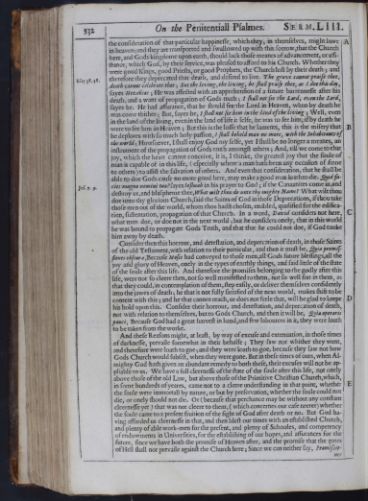 532
On the Penitentiall Psalmes.
Serm. LIII.
the consideration of that particular happinesse, which they, in themselves, might haye
532
On the Penitentiall Psalmes.
Serm. LIII.
the consideration of that particular happinesse, which they, in themselves, might haye
in heaven; and they are transported and swallowed up with this sorrow, that the Church
here, and gods kingdome upon earth, should lack those meanes of advancement, or assi-
stance, which God, by their service, was pleased to afford to his Church. Whether they
were good Kings, good Priests, or good Prophets, the Church lost by their death; and
therefore they deprecated that death, Esay 38.18. and desired to live. The grave cannot praise thee,
death cannot celebrate thee; But the living, the living, he shall praise thee, as I doe this day,
sayes Hezekias; He was affected with an apprehension of a future barrennesse after his
death, and a want of propagation of Gods truth; I shall not see the Lord, even the Lord,
sayes he. He had assurance, that he should see the Lord in Heaven, when by death he
was come thither; But, sayes he, I shall not see him in the land of the living; Well, even
in the land of the living, even in the land of life it selfe, he was to see him, if by death he
were to see him in Heaven; But this is the losse that he laments, this is the misery that
he deplores with so much holy passion, I shall behold man no more, with the Inhabitants of
the world; Howsoever, I shall enjoy God my selfe, yet I shall be no longer a meanes, an
instrument of the propagation of Gods truth amongst others; And, till we come to that
joy, which the heart cannot conceive, it is, I thinke, the greatest joy that the soule of
man is capable of in this life, (especially where a man hath been any occasion of sinne
to others) to assist the salvation of others. And even that consideration, that he shall be
able to doe Gods cause no more good here, may make a good man loath to die. Quid fa-
cies magno nomini tuo?Jos. 7.9. sayes Ioshuah in his prayer to God; if the Canaanites come in, and
destroy us, and blaspheme thee, What wilt thou do unto thy mighty Name? What wilt thou
doe unto thy glorious Church, said the Saints of God in those Deprecations, if thou take
those men out of the world, whom thou hadst chosen, enabled, qualified for the edifica-
tion, sustentation, propagation of that Church. In a word, David considers not here,
what men doe, or doe not in the next world; but he considers onely, that in this world
he was bound to propagate Gods Truth, and that that he could not doe, if God tooke
him away by death.
Consider then this horrour, and detestation, and deprecation of death, in those Saints
of the old Testament, with relation to their particular, and then it must be, Quia promis-
siones obscuræ, Because Moses had conveyed to those men, all Gods future blessings, all the
joy and glory of Heaven, onely in the types of earthly things, and said little of the state
of the soule after this life. And therefore the promises belonging to the godly after this
life, were not so cleere then, not so well manifested to them, not so well fixt in them, as
that they could, in contemplation of them, step easily, or deliver themselves confidently
into the jawes of death; he that is not fully satisfied of the next world, makes shift to be
content with this; and he that cannot reach, or does not feele that, will be glad to keepe
his hold upon this. Consider their horrour, and detestation, and deprecation of death,
not with relation to themselves, but to Gods Church, and then it will be, Quia operarii
pauci, Because God had a great harvest in hand, and few labourers in it, they were loath
to be taken from the worke.
And these Reasons might, at least, by way of excuse and extenuation, in those times
of darknesse, prevaile somewhat in their behalfe; They saw not whither they went,
and therefore were loath to goe; and they were loath to goe, because they saw not how
Gods Church would subsist, when they were gone. But in these times of ours, when Al-
mighty God hath given an abundant remedy to both these, their excuses will not be ap-
pliable to us. We have a full cleernesse of the state of the soule after this life, not onely
above those of the old Law, but above those of the Primitive Christian Church, which,
in some hundreds of yeares, came not to a cleere understanding in that point, whether
the soule were immortall by nature, or but by preservation, whether the soule could not
die, or onely should not die. Or (because that perchance may be without any constant
cleernesse yet) that was not cleere to them, (which concernes our case neerer) whether
the soule came to a present fruition of the sight of God after death or no. But God ha-
ving afforded us cleernesse in that, and then blest our times with an established Church,
and plenty of able work-men for the present, and plenty of Schooles, and competency
of endowments in Universities, for the establishing of our hopes, and assurances for the
future, since we have both the promise of Heaven after, and the promise that the gates
of Hell shall not prevaile against the Church here; Since we can neither say, Promissio-
nes
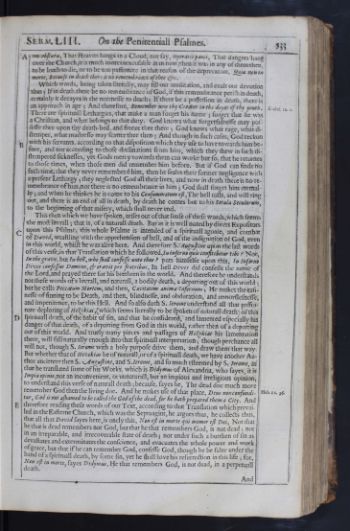 Serm. LII.
On the Penitentiall Psalmes.
533
nes obseuræ, That Heaven hangs in a Cloud, nor say, Operarii pauci, That dangers hang
Serm. LII.
On the Penitentiall Psalmes.
533
nes obseuræ, That Heaven hangs in a Cloud, nor say, Operarii pauci, That dangers hang
over the Church, it is much more inexcusable in us now, then it was in any of them then,
to be loath to die, or to be too passionate in that reason of the deprecation, Quia non in
morte, Because in death there is no remembrance of thee &c.
Which words, being taken literally, may fill our meditation, and exalt our devotion
thus; If in death there be no remembrance of God, if this remembrance perish in death,
certainly it decayes in the neernesse to death; If there be a possession in death, there is
an approach in age; And therefore, Remember now thy Creator in the dayes of thy youth.
Eccles. 12.1. There are spirituall Lethargies, that make a man forget his name; forget that he was
a Christian, and what belongs to that duty. God knows what forgetfulnesse may pos-
sesse thee upon thy death-bed, and freeze thee there; God knows what rage, what di-
stemper, what madnesse may scatter thee then; And though in such cases, God reckon
with his servants, according to that disposition which they use to have towards him be-
fore, and not according to those declinations from him, which they shew in such di-
stempered sicknesses, yet Gods mercy towards them can worke but so, that he returnes
to those times, when those men did remember him before. But if God can finde no
such time, that they never remembred him, then he seales their former negligence with
a present Lethargy; they neglected God all their lives, and now in death there is no re-
membrance of him, nor there is no remembrance in him; God shall forget him eternal-
ly; and when he thinkes he is come to his Consummatum est, The bell tolls, and will ring
out, and there is an end of all in death, by death he comes but to his Secula Seculorum,
to the beginning of that misery, which shall never end.
This then which we have spoken, arises out of that sense of these words, which seems
the most literall; that is, of a naturall death. But as it is well noted by divers Expositors
upon this Psalme, this whole Psalme is intended of a spirituall agonie, and combat
of David, wrastling with the apprehension of hell, and of the indignation of God, even
in this world, whilst he was alive here. And therefore S. Augustine upon the last words
of this verse, in that Translation which he followed, In inferno quis confitebitur tibi? Not,
In the grave, but In hell, who shall confesse unto thee? puts himselfe upon this, In Inferne
Dives confessus Domino, & oravit pro fratribus, In hell Dives did confesse the name of
the Lord, and prayed there for his brethren in the world. And therefore he understands
not these words of a literall, and naturall, a bodily death, a departing out of this world;
but he calls Peccatum Mortem, and then, Cæcitatem animæ Infernum; He makes the easi-
nesse of sinning to be Death, and then, blindnesse, and obduration, and remorslesnesse,
and impenitence, to be this Hell. And so also doth S. Ierome understand all that passio-
nate deploring of Hezekias, (which seems literally to be spoken of naturall death) of this
spirituall death, of the habit of sin, and that he considered, and lamented especially his
danger of that death, of a departing from God in this world, rather then of a departing
out of this world. And truely many pieces and passages of Hezekias his lamentation
there, will fall naturally enough into that spirituall interpretation; though perchance all
will not, though S. Ierome with a holy purpose drive them, and draw them that way.
But whether that of Hezekias be of naturall, or of a spirituall death, we have another Au-
thor ancienter then S. Augustine, and S. Ierome, and so much esteemed by S. Iereme, as
that he translated some of his Works, which is Didymus of Alexandria, who sayes, it is
Impia opinio, not an inconvenient, or unnaturall, but an impious and irreligious opinion,
to understand this verse of naturall death; because, sayes he, The dead doe much more
remember God then the living doe. And he makes use of that place, Deus non confundi-
tur, Heb. 11.16. God is not ashamed to be called the God of the dead, for he hath prepared them a City. And
therefore reading these words of our Text, according to that Translation which prevai-
led in the Easterne Church, which was the Septuagint, he argues thus, he collects thus,
that all that David sayes here, is onely this, Non est in morte qui memor est Dei, Not that
he that is dead remembers not God, but that he that remembers God, is not dead; not
in an irreparable, and irrecoverable state of death; not under such a burthen of sin as
devastates and exterminates the conscience, and evacuates the whole power and work
of grace, but that if he can remember God, confesse God, though he be falne under the
hand of a spirituall death, by some sin, yet he shall have his resurrection in this life; for,
Non est in morte, sayes Didymus, He that remembers God, is not dead, in a perpetuall
death. And
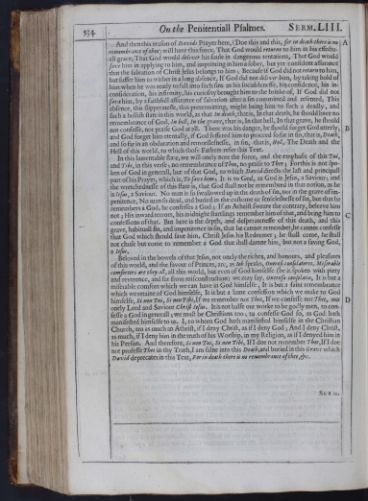 534
On the Penitentiall Psalmes.
Serm. LIII.
And then this reason of Davids Prayer here, (Doe this and this, for in death there is no
534
On the Penitentiall Psalmes.
Serm. LIII.
And then this reason of Davids Prayer here, (Doe this and this, for in death there is no
remembrance of thee) will have this force, That God would returne to him in his effectu-
all grace, That God would deliver his soule in dangerous tentations, That God would
save him in applying to him, and imprinting in him a sober, but yet confident assurance
that the salvation of Christ Jesus belongs to him; Because if God did not return to him,
but suffer him to wither in a long absence, If God did not deliver him, by taking hold of
him when he was ready to fall into such sins as his sociablenesse, his confidence, his in-
consideration, his infirmity, his curiosity brought him to the brinke of, If God did not
save him, by a faithfull assurance of salvation after a sin committed and resented, This
absence, this slipperinesse, this pretermitting, might bring him to such a deadly, and
such a hellish state in this world, as that In death, that is, In that death, he should have no
remembrance of God, In hell, In the grave, that is, In that hell, In that grave, he should
not confesse, nor praise God at all. There was his danger, he should forget God utterly,
and God forget him eternally, if God suffered him to proceed so far in sin, that is, Death,
and so far in an obduration and remorslesnesse, in sin, that is, Hell, The Death and the
Hell of this world, to which those Fathers refer this Text.
In this lamentable state, we will onely note the force, and the emphasis of this Tui,
and Tibi, in this verse; no remembrance of Thee, no praise to Thee; For this is not spo-
ken of God in generall, but of that God, to which David directs the last and principall
part of his Prayer, which is, To save him; It is to God, as God is Jesus, a Saviour; and
the wretchednesse of this state is, that God shall not be remembred in that notion, as he
is Iesus, a Saviour. No man is so swallowed up in the death of sin, nor in the grave of im-
penitence, No man so dead, and buried in the custome or senselesnesse of sin, but that he
remembers a God, he confesses a God; If an Atheist sweare the contrary, beleeve him
not; His inward terrors, his midnight startlings remember him of that, and bring him to
confessions of that. But here is the depth, and desperatenesse of this death, and this
grave, habituall sin, and impenitence in sin, that he cannot remember, he cannot confesse
that God which should save him, Christ Jesus his Redeemer; he shall come, he shall
not chuse but come to remember a God that shall damne him, but not a saving God,
a Iesus.
Beloved in the bowels of that Jesus, not onely the riches, and honours, and pleasures
of this world, and the favour of Princes, are, as Iob speaks, Onerosi consolatores, Miserable
comforters are they all, all this world, but even of God himselfe (be it spoken with piety
and reverence, and far from misconstruction) we may say, Onerosa consolatio, It is but a
miserable comfort which we can have in God himselfe, It is but a faint remembrance
which we retaine of God himselfe, It is but a lame confession which we make to God
himselfe, Si non Tui, Si non Tibi, If we remember not Thee, If we confesse not Thee, our
onely Lord and Saviour Christ Iesus. It is not halfe our worke to be godly men, to con-
fesse a God in generall; we must be Christians too; to confesse God so, as God hath
manifested himselfe to us. I, to whom God hath manifested himselfe in the Christian
Church, am as much an Atheist, if I deny Christ, as if I deny God; And I deny Christ,
as much, if I deny him in the truth of his Worship, in my Religion, as if I denyed him in
his Person. And therefore, Si non Tui, Si non Tibi, If I doe not remember Thee, If I doe
not professe Thee in thy Truth, I am falne into this Death, and buried in this Grave which
David deprecates in this Text, For in death there is no remembrance of thee, &c. Serm.
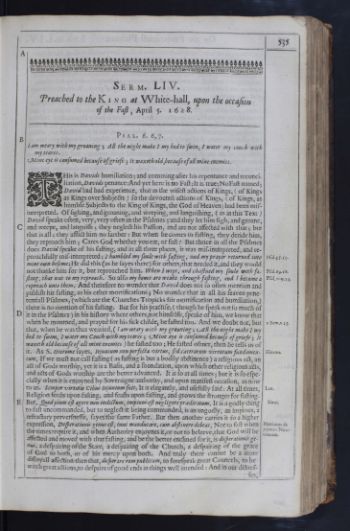 535
535
Serm. LIV.
Preached to the King at White-hall, upon the occasion
of the Fast, April 5. 1628.
Psal. 6.6,7.
I am weary with my groaning; All the night make I my bed to swin, I water my couch with
my teares.
Mine eye is consumed because of griefe; It waxeth old, because of all mine enemies.
THisThis is Davids humiliation; and comming after his repentance and reconci-
liation, Davids penance: And yet here is no Fast; It is true; No Fast named;
David had had experience, that as the wisest actions of Kings, (of Kings
as Kings over Subjects) so the devoutest actions of Kings, (of Kings, as
humble Subjects to the King of Kings, the God of Heaven) had been mis-
interpreted. Of sighing, and groaning, and weeping, and languishing, (as in this Text)
David speaks often, very, very often in the Psalmes; and they let him sigh, and groane,
and weepe, and languish; they neglect his Passion, and are not affected with that; but
that is all; they afflict him no farther: But when he comes to fasting, they deride him,
they reproach him; Cares God whether you eat, or fast? But thrice in all the Psalmes
does David speake of his fasting, and in all three places, it was mis-interpreted, and re-
proachfully mis-interpreted; I humbled my soule with fasting, Psal. 35.13. and my prayer returned into
mine own bosome; He did this (as he sayes there) for others, that needed it, and they would
not thanke him for it, but reproached him. Psal. 69.10. When I wept, and chastned my soule with fa-
sting, that was to my reproach. Psal. 109.24. So also my bones are weake through fasting, and I became a
reproach unto them. And therefore no wonder that David does not so often mention and
publish his fasting, as his other mortifications; No wonder that in all his seaven pene-
tentiall Psalmes, (which are the Churches TropicksTopicks for mortification and humiliation,)
there is no mention of his fasting. But for his practise, (though he speak not so much of
it in the Psalmes) in his history where others, not himselfe, speake of him, we know that
when he mourned, and prayed for his sick childe, he fasted too. And we doubt not, 2 Sam. 2.15. but
that, when he was thus wearied, (I am weary with my groaning; All the night make I my
bed to swim, I water my Couch with my teares; Mine eye is consumed because of griefe; It
waxeth old because of all mine enemies) he fasted too; He fasted oftner, then he tells us of
it. As S. Hierome sayes, Iejunium non perfecta virtus, sed cæterarum virtutum Hieron. fundamen-
tum, If we must not call fasting (as fasting is but a bodily abstinence) a religious act, an
act of Gods worship, yet it is a Basis, and a foundation, upon which other religious acts,
and acts of Gods worship are the better advanced. It is so at all times; but it is so espe-
cially when it is enjoyned by Soveraigne authority, and upon manifest occasion, as now
to us. Semper virtutis Cibus Iejunium fuit, It is elegantly, and usefully said: At all times, Leo.
Religion feeds upon fasting, and feasts upon fasting, and grows the stronger for fasting.
But, Quod pium est agere non indictum, impium est negligere prædicatum, Idem. It is a godly thing
to fast uncommanded, but to neglect it being commanded, is an ungodly, an impious, a
refractary perversnesse, sayes the same Father. But then another carries it to a higher
expression, Desperationis genus est, tunc manducare, cum abstinere debeas, Maximus de
jejunio Nine-
vitarum. Not to fast when
the times require it, and when Authority enjoynes it, or not to beleeve, that God will be
affected and moved with that fasting, and be the better enclined for it, is desperationis ge-
nus, a despairing of the State, a despairing of the Church, a despairing of the grace
of God to both, or of his mercy upon both. And truly there cannot be a more
disloyall affection then that, desperare rem publicam, to forespeak great Councels, to be
witchbe-
witch great actions, to despaire of good ends in things well intended: And in our distres-
ses,
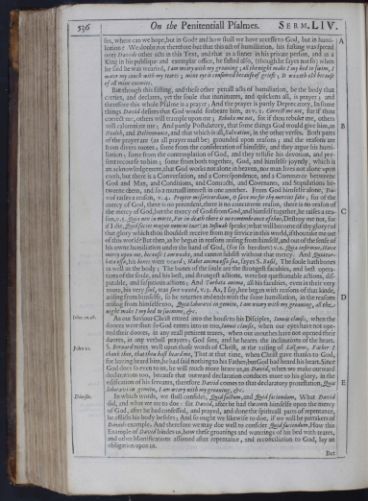 536
On the Penitentiall Psalmes.
Serm. LIV.
ses, where can we hope, but in God? and how shall we have accesse to God, but in humi-
536
On the Penitentiall Psalmes.
Serm. LIV.
ses, where can we hope, but in God? and how shall we have accesse to God, but in humi-liation? We doubt not therefore but that this act of humiliation, his fasting was spread
over Davids other acts in this Text, and that as a sinner in his private person, and as a
King in his publique and exemplar office, he fasted also, (though he sayes not so) when
he said he was wearied, I am weary with my groaning; all the night make I my bed to swim, I
water my couch with my teares; mine eye is consumed because of griefe; It waxeth old because
of all mine enemies.
But though this fasting, and these other penall acts of humiliation, be the body that
carries, and declares, yet the soule that inanimates, and quickens all, is prayer; and
therefore this whole Psalme is a prayer; And the prayer is partly Deprecatory, In some
things David desires that God would forbeare him, as v. 1. Correct me not, for if thou
correct me, others will trample upon me; Rebuke me not, for if thou rebuke me, others
will calumniate me; And partly Postulatory, that some things God would give him, as
Health, and Deliverance, and that which is all, Salvation, in the other verses. Both parts
of the prayer are (as all prayer must be) grounded upon reasons; and the reasons are
from divers rootes; some from the consideration of himselfe, and they argue his humi-
liation; some from the contemplation of God, and they testifie his devotion, and pre-
sent recourse to him; some from both together, God, and himselfe joyntly, which is
an acknowledgement, that God works not alone in heaven, nor man lives not alone upon
earth, but there is a Conversation, and a Correspondence, and a Commerce betweene
God and Man, and Conditions, and Contracts, and Covenants, and Stipulations be-
tweene them, and so a mutuall interest in one another. From God himselfe alone, Da-
vid raises a reason, v. 4. Propter misericordiam, O save me for thy mercies sake; for of the
mercy of God, there is no precedent, there is no concurrent reason, there is no reason of
the mercy of God, but the mercy of God: from God, and himself together, he raises a rea-
son, v. 5. Quia non in morte, For in death there is no remembrance of thee; Destroy me not, for
if I die, Quid facies magno nomini tuo? (as Ioshuah speaks) what will become of thy glory? of
that glory which thou shouldest receive from my service in this world, if thou take me out
of this world? But then, as he begun in reasons arising from himself, and out of the sense of
his owne humiliation under the hand of God, (for so hee does) v. 2. Quia infirmus, Have
mercy upon me, because I am weake, and cannot subsist without that mercy. And Quia tur-
bata ossa, his bones were vexed; Habet anima ossa sua, sayes S. Basil, The soule hath bones
as well as the body; The bones of the soule are the strongest faculties, and best opera-
tions of the soule, and his best, and strongest actions, were but questionable actions, dis-
putable, and suspitious actions; And Turbata anima, all his faculties, even in their very
roote, his very soul, was sore vexed, v. 3. As, I say, hee began with reasons of that kinde,
arising from himselfe, so he returnes and ends with the same humiliation, in the reasons
arising from himselfe too, Quia laboravi in gemitu, I am weary with my groaning, all the
night make I my bed to swimme, &c.
As our Saviour Christ entred into the house to his Disciples, Iohn 20.28. Ianuis clausis, when the
doores were shut: so God enters into us too, Ianuis clausis, when our eyes have not ope-
ned their doores, in any reall penitent teares, when our mouthes have not opened their
doores, in any verball prayers; God sees, and he heares the inclinations of the heart.
S. Bernard notes well upon those words of Christ, John 11. at the raising of Lazarus, Father I
thank thee, that thou hast heard me, That at that time, when Christ gave thanks to God,
for having heard him, he had said nothing to his Father; but God had heard his heart. Since
God does so even to us, he will much more heare us, as David, when we make outward
declarations too, because that outward declaration conduces more to his glory, in the
edification of his servants, therefore David comes to that declaratory protestation, Quia
laboravi in gemitu, I am weary with my groaning, &c.
In which words, Divisio. we shall consider, Quid factum, and Quid faciendum, What David
did, and what we are to doe: for David, after he had thrown himselfe upon the mercy
of God, after he had confessed, and prayed, and done the spirituall parts of repentance,
he afflicts his body besides; And so ought we likewise to doe, if we will be partakers of
Davids example. And therefore we may doe well to consider Quid faciendum, How this
Example of David bindes us, how these groanings and waterings of his bed with teares,
and other Mortifications assumed after repentance, and reconciliation to God, lay an
obligation upon us. But
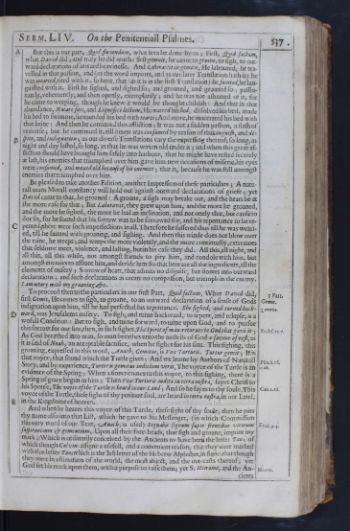 Serm. LIV.
On the Penitentiall Psalmes.
537
Serm. LIV.
On the Penitentiall Psalmes.
537
But this is our part, Quid faciendum, what is to be done by us; First, Quid factum,
what David did; and truly he did much: first gemuit, he came to groane, to sigh, to out-
ward declarations of inward heavinesse. And Laboravit in gemitu, He laboured, he tra-
velled in that passion, and (as the word imports, and as our later Translation hath it) he
was wearied, tired with it; so farre, that (as it is in the first Translation) he fainted, he lan-
guished with it. First he sighed, and sighed so; and groaned, and groaned so; passio-
nately, vehemently, and then openly, exemplarily; and he was not ashamed of it, for
he came to weeping, though he knew it would be thought childish: And that in that
abundance, Natare feci, and Liqueseci lectum, He watred his bed, dissolved his bed, made
his bed to swimme, surrounded his bed with teares; And more, he macerated his bed with
that brine: And then he continued this affliction; It was not a sudden passion, a flash of
remorse; but he continued it, till his eye was consumed by reason of that anguish, and de-
spite, and indignation; as our diverse Translations vary the expressing thereof; so long, as
night and day lasted, so long, as that he was waxen old under it; and when this great af-
fliction should have brought him safely into harbour, that he might have rested securely
at last, his enemies that triumphed over him, gave him new occasions of miserie, his eyes
were consumed, and waxed old because of his enemies; that is, because he was still amongst
enemies that triumphed over him.
Be pleased to take another Edition, another Impression of these particulars; A natu-
rall mans Morall constancy will hold out against outward declarations of griefe; yet
David came to that, he groaned: A groane, a sigh may breake out, and the heart be at
the more ease for that; But Laboravit, they grew upon him, and the more he groaned,
and the more he sighed, the more he had an inclination, and not onely that, but cause to
doe so, for he found that his sorrow was to be sorrowed for, and his repentance to be re-
pented, there were such imperfections in all. Therefore he suffered thus till he was weari-
ed, till he fainted with groaning, and sighing. And then this winde does not blow over
the raine, he weeps; and weeps the more violently, and the more continually; extreames
that seldome meet, violence, and lasting, but in his case they did. All this, all night, and
all this, all this while, not amongst friends to pity him, and condole with him, but
amongst enemies to affront him, and deride him: So that here are all the ingredients, all the
elements of misery; Sorrow of heart, that admits no disguise, but flowes into outward
declarations; and such declarations as create no compassion, but triumph in the enemy.
I am weary with my groaning, &c.
To proceed then to the particulars in our first Part, Quid factum, What David did, 1 Part.
Gemit.
first Gemit, He comes to sigh, to groane, to an outward declaration of a sense of Gods
indignation upon him, till he had perfected his repentance. She sighed,Lament. and turned back-
ward, was Jerusalems misery. To sigh, and turne backward, to repent, and relapse, is a
wofull Condition: But to sigh, and turne forward, to turne upon God, and to pursue
this sorrow for our sins, then, in such sighes, The Spirit of man returnes to God that gave it; Eccles. 12.7.
As God breathed into man, so man breathes unto the nostrils of God a savour of rest, as
it is said of Noah, an acceptable sacrifice, when he sighes for his sins. This fighing, this
groaning, expressed in this word, Anach, Gemitus, is Vox Turturis. Turtur gemit; It is
that voyce, that sound which the Turtle gives;Plin. li. 18.
c. 28. And we learne by Authors of Naturall
Story, and by experience, Turturis gemitus indicium veris, The voyce of the Turtle is an
evidence of the Spring; When a sinner comes to this voyce, to this sighing, there is a
Spring of grace begun in him; Then Vox Turturis audita in terra nostra, sayes Christ to
his Spouse, The voyce of the Turtle is heard in our Land; And so he sayes to thy soule, Can. 2.12. This
voyce of the Turtle, these sighs of thy penitent soul, are heard in terra nostra, in our Land,
in the Kingdome of heaven.
And when he heares this voyce of this Turtle, these sighs of thy soule, then he puts
thy name also into that List, which he gave to his Messenger, (in which Commission
this very word of our Text, Ezek. 9.4. Anach, is used) Signabis signum super frontibus virorum
suspirantium & gementium, Upon all their fore heads, that sigh and groane, imprint my
mark; Which is ordinarily conceived by the Ancients to have been the letter Tau; of
which though Calvin assigne a usefull, and a convenient reason, that they were marked
with this letter Tau, which is the last letter of the Hebrew Alphabet, in signe, that though
they were in estimation of the world, the most abject, and the out-casts thereof, yet
God set his mark upon them, with a purpose to raise them; yet S. Hierome, Hieron. and the An-
cients
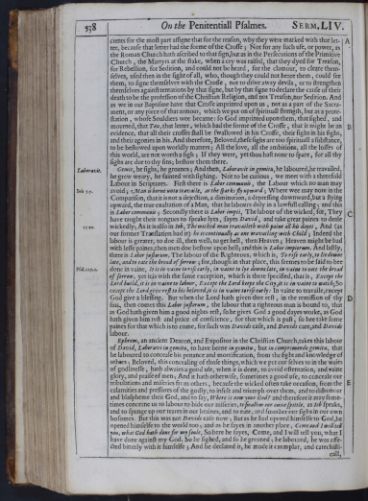 538
On the Penitentiall Psalmes.
Serm. LIV.
cients for the most part assigne that for the reason, why they were marked with that
let-
538
On the Penitentiall Psalmes.
Serm. LIV.
cients for the most part assigne that for the reason, why they were marked with that
let-ter, because that letter had the forme of the Crosse; Not for any such use, or power, as
the Roman Church hath ascribed to that sign, but as in the Persecutions of the Primitive
Church, the Martyrs at the stake, when a cry was raised, that they dyed for Treason,
for Rebellion, for Sedition, and could not be heard, for the clamour, to cleare them-
selves, used then in the sight of all, who, though they could not heare them, could see
them, to signe themselves with the Crosse, not to drive away devils, or to strengthen
themselves against tentations by that signe, but by that signe to declare the cause of their
death to be the profession of the Christian Religion, and not Treason, nor Sedition. And
as we in our Baptisme have that Crosse imprinted upon us, not as a part of the Sacra-
ment, or any piece of that armour, which we put on of spirituall strength, but as a prote-
station, whose Souldiers wee became: so God imprinted upon them, that sighed, and
mourned, that Tau, that letter, which had the forme of the Crosse, that it might be an
evidence, that all their crosses shall be swallowed in his Crosse, their sighs in his sighs,
and their agonies in his. And therefore, Beloved, these sighs are too spirituall a substance,
to be bestowed upon worldly matters; All the love, all the ambitions, all the losses of
this world, are not worth a sigh; If they were, yet thou hast none to spare, for all thy
sighs are due to thy sins; bestow them there.
Gemit, Laboravit. he sighs, he groanes; And then, Laboravit in gemitu, he laboured, he travailed,
he grew weary, he fainted with sighing. Not to be curious, we meet with a threefold
Labour in Scriptures. First there is Labor communis, the Labour which no man may
avoid;Iob 5.7. Man is borne unto travaile, as the sparks fly upward; Where wee may note in the
Comparison, that it is not a dejection, a diminution, a depressing downward, but a flying
upward, the true exaltation of a Man, that he labours duly in a lawfull calling; and this
is Labor communis; Secondly there is Labor impii, The labour of the wicked, for, They
have taught their tongues to speake lyes, sayes David, and take great paines to deale
wickedly;15.20. As it is also in Iob, The wicked man travaileth with paine all his dayes, And (as
our former Translation had it) he is continually as one travailing with Child; Indeed the
labour is greater, to doe ill, then well; to get hell, then Heaven; Heaven might be had
with lesse paines, then men doe bestow upon hell; and this is Labor impiorum. And lastly,
there is Labor justorum, The labour of the Righteous, which is, To rise early, to lie downe
late, and to cateeate the bread of sorrow; for, though in that place, this seemes to be said to bee
done in vaine, Psal. 127.2. It is in vaine to rise early, in vaine to lye downe late, in vaine to eate the bread
of sorrow, yet it is with the same exception, which is there specified, that is, Except the
Lord build, it is in vaine to labour, Except the Lord keepe the City, it is in vaine to watch; So
except the Lord give rest to his beloved, it is in vaine to rise early: In vaine to travaile, except
God give a blessing. But when the Lord hath given thee rest, in the remission of thy
sins, then comes this Labor justorum, the labour that a righteous man is bound to, that
as God hath given him a good nights rest, so he gives God a good dayes worke, as God
hath given him rest and peace of conscience, for that which is past, so hee take some
paines for that which is to come, for such was Davids case, and Davids care, and Davids
labour.
Ephrem, an ancient Deacon, and Expositor in the Christian Church, takes this labour
of David, Laboravi in gemitu, to have beene in gemitu, but in comprimendo gemitu, that
he laboured to conceale his penance and mortification, from the sight and knowledge of
others; Beloved, this concealing of those things, which we put our selves to in the waies
of godlinesse, hath alwaies a good use, when it is done, to avoid ostentation, and vaine
glory, and praise of men; And it hath otherwise, sometimes a good use, to conceale our
tribulations and miseries from others, because the wicked often take occasion, from the
calamities and pressures of the godly, to insult and triumph over them, and to dishonour
and blaspheme their God, and to say, Where is now your God? and therefore it may some-
times concerne us to labour to hide our miseries, to swallow our owne spittle, as Iob speaks,
and to spunge up our teares in our braines, and to eate, and smother our sighs in our own
bosomes. But this was not Davids case now; But as he had opened himselfe to God, he
opened himselfe to the world too; and as he sayes in another place, Come and I will tell
you, what God hath done for my soule, So here he sayes, Come, and I will tell you, what I
have done against my God. So he sighed, and so he groaned; he laboured, he was affe-
cted bitterly with it himselfe; And he declated it, he made it exemplar, and catechisti-
call
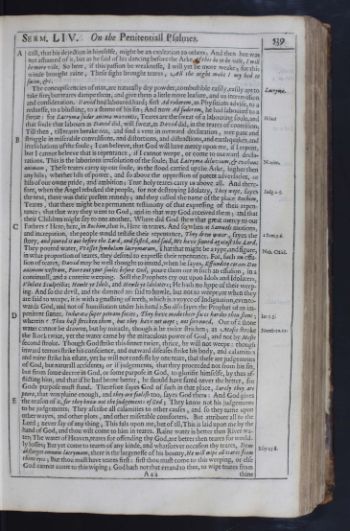 Serm. LIV.
On the Penitentiall Psalmes.
539
call, that his dejection in himselfe, might be an exaltation to others; And then hee was
Serm. LIV.
On the Penitentiall Psalmes.
539
call, that his dejection in himselfe, might be an exaltation to others; And then hee was
not ashamed of it, but as he said of his dancing before the Arke, If this be to be vile, I will
be more vile, So here, if this passion be weaknesse, I will yet be more weake; for this
winde brought raine, These sighs brought teares, All the night make I my bed to
swim, &c.
The concupiscencies of man, are naturally dry powder, combustible easily, Lacrymæ. easily apt to
take fire; but teares dampe them, and give them a little more leasure, and us intermission
and consideration. David had laboured hard; first Ad ruborem, as Physitians advise, to a
rednesse, to a blushing, to a shame of his sin; And now Ad sudorem, he had laboured to a
sweat: for Lacrymæ sudor animæ mœrentis, Teares are the sweat of a labouring soule, and Hilar.
that soule that labours as David did, will sweat, as David did, in the teares of contrition;
Till then, till teares breake out, and find a vent in outward declaration, wee pant and
struggle in miserable convulsions, and distortions, and distractions, and earthquakes, and
irresolutions of the soule; I can beleeve, that God will have mercy upon me, if I repent,
but I cannot beleeve that is repentance, if I cannot weepe, or come to outward decla-
rations. This is the laborious irresolution of the soule; But Lacrymæ diluvium, Nazian. & evehunt
animam, These teares carry up our soule, as the flood carried up the Arke, higher then
any hils; whether hils of power, and so above the oppression of potent adversaries, or
hils of our owne pride, and ambition; True holy teares carry us above all. And there-
fore, when the Angel rebuked the people, for not destroying Idolatry, They wept, Iudg. 2.5. sayes
the text, there was their present remedy; and they called the name of the place Bochim,
Teares, that there might be a permanent testimony of that expressing of their repen-
tance; that that way they went to God, and in that way God received them; and that
their Children might say to one another, Where did God shew that great mercy to our
Fathers? Here; here, in Bochim, that is, Here in teares. And so when at Samuels motions,
and increpation, the people would testifie their repentance, They drew water, 1 Sam. 7.6. sayes the
story, and poured it out before the Lord, and fasted, and said, We have sinned against the Lord.
They poured water, Vt esset symbolum lacrymarum, That that might be a type, and figure, Nab. Oziel.
in what proportion of teares, they desired to expresse their repentance. For, such an effu-
sion of teares, David may be well thought to intend, when he sayes, Effundite coram Deo
animam vestram, Poure out your soules before God, poure them out in such an effusion, in a
continuall, and a contrite weeping. Still the Prophets cry out upon Idols and Idolaters,
Vlulate Sculptilia; Howle ye Idols, and Howle ye Idolaters; He hath no hope of their weep-
ing. And so the devil, and the damned are said to howle, but not to weepe; or when they
are said to weepe, it is with a gnashing of teeth, which is a voyce of Indignation, even to-
wards God, and not of humiliation under his hand: So also sayes the Prophet of an im-
penitent sinner, Induratæ super petram facies, They have made their faces harder then stone; Ier. 5.3.
wherein? Thou hast stricken them, but they have not wept; not sorrowed. Out of a stone
water cannot be drawne, but by miracle, though it be twice stricken;Numb. 20.11. as Moses stroke
the Rock twice, yet the water came by the miraculous power of God, and not by Moses
second stroke. Though God strike this sinner twice, thrice, he will not weepe: though
inward terrors strike his conscience, and outward diseases strike his body, and calamities
and ruine strike his estate, yet he will not confesse by one teare, that these are judgements
of God, but naturall accidents; or if judgements, that they proceeded not from his sin,
but from some decree in God, or some purpose in God, to glorifie himselfe, by thus af-
flicting him, and that if he had beene better, he should have fared never the better, for
Gods purpose must stand. Therefore sayes God of such in that place, Surely they are
poore, that was plaine enough, and they are foolish too, sayes God there: And God gives
the reason of it, for they know not the judgements of God; They know not his judgements
to be judgements; They ascribe all calamities to other causes, and so they turne upon
other wayes, and other plots, and other miserable comforters. But attribute all to the
Lord; never say of any thing, This fals upon me, but of all, This is laid upon me by the
hand of God, and thou wilt come to him in teares. Raine water is better then River wa-
ter; The water of Heaven, teares for offending thy God, are better then teares for world-
ly losses; But yet come to teares of any kinde, and whatsoever occasion thy teares, Esay 25.8. Deus
absterget omnem lacrymam, there is the largenesse of his bounty, He will wipe all teares from
thine eyes; But thou must have teares first: first thou must come to this weeping, or else
God cannot come to this wiping; God hath not that errand to thee, to wipe teares from Aaa thine
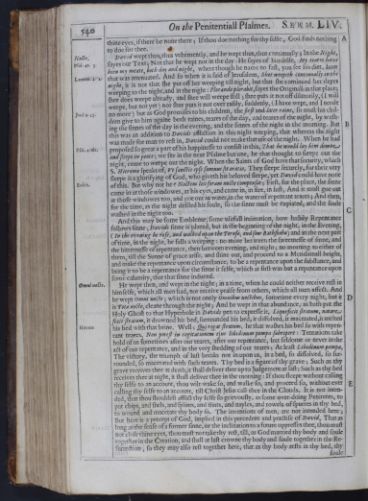 540
On the Penitentiall Psalmes.
Serm. LIV.
thine eyes, if there be none there; If thou doe nothing for thy selfe, God finds nothing
540
On the Penitentiall Psalmes.
Serm. LIV.
thine eyes, if there be none there; If thou doe nothing for thy selfe, God finds nothing
to doe for thee.
David wept thus, Nocte. thus vehemently, and he wept thus, thus continually; In the Night,
sayes our Text;Psal. 42.3. Not that he wept not in the day: He sayes of himselfe, My teares have
been my meate, both day and night, where though he name no fast, you see his diet, how
that was attenuated.Lament. 1.2. And so when it is said of Jerusalem, Shee weepeth continually in the
night, it is not that she put off her weeping till night, but that she continued her dayes
weeping to the night, and in the night: Plorando plorabit, sayes the Originall in that place;
shee does weepe already, and shee will weepe still; shee puts it not off dilatorily, (I will
weepe, but not yet) nor shee puts it not over easily, suddenly, (I have wept, and I neede
no more) but as God promises to his children, Joel 1.23. the first and later raine, so must his chil-
dren give to him againe both raines, teares of the day, and teares of the night, by wash-
ing the sinnes of the day in the evening, and the sinnes of the night in the morning. But
this was an addition to Davids affliction in this night weeping, that whereas the night
was made for man to rest in, David could not make that use of the night. When he had
proposed so great a part of his happinesse to consist in this, Psal. 4. ult. That he would lay him downe
and sleepe in peace; we see in the next Psalme but one, he that thought to sleepe out the
night, come to weepe out the night. When the Saints of God have that security, which
S. Hierome speaks of, Vt sanctis ipse somnus sit oratio, They sleepe securely, for their very
sleepe is a glorifying of God, who giveth his beloved sleepe, yet David could have none
of this.Euseb. But why not he? Noctem letiferam nocte compensat; First, for the place, the sinne
came in at those windowes, at his eyes, and came in, in fire, in lust, And it must goe out
at those windowes too, and goe out in water, in the water of repentant teares; And then,
for the time, as the night defiled his soule, so the sinne must be expiated, and the soule
washed in the night too.
And this may be some Embleme, some usefull intimation, how hastily Repentance
follows sinne; Davids sinne is placed, but in the beginning of the night, in the Evening,
(In the evening he rose, and walked upon the Terase, and saw Bathsheba) and in the next part
of time, in the night, he falls a weeping: no more between the sweetnesse of sinne, and
the bitternesse of repentance, then between evening, and night; no morning to either of
them, till the Sunne of grace arise, and shine out, and proceed to a Meridionall height,
and make the repentance upon circumstance, to be a repentance upon the substance, and
bring it to be a repentance for the sinne it selfe, which at first was but a repentance upon
some calamity, that that sinne induced.
He wept then, Omni nocte. and wept in the night; in a time, when he could neither receive rest in
himselfe, which all men had, nor receive praise from others, which all men affect. And
he wept Omni nocte; which is not onely Omnibus noctibus, sometime every night, but it
is Tota nocte, cleane through the night; And he wept in that abundance, as hath put the
Holy Ghost to that Hyperbole in Davids pen to expresse it, Liquefecit stratum, natare
fecit stratum, it drowned his bed, surrounded his bed, it dissolved, it macerated, it melted
his bed with that brine. Well; Qui rigat stratum, he that washes his bed so with Hieron. repen-
tant teares, Non potest in cogitationem ejus libidinum pompa subrepere: Tentations take
hold of us sometimes after our teares, after our repentance, but seldome or never in the
act of our repentance, and in the very shedding of our teares; At least Libidinum pompa,
The victory, the triumph of lust breaks not in upon us, in a bed, so dissolved, so sur-
rounded, so macerated with such teares. Thy bed is a figure of thy grave; Such as thy
grave receives thee at death, it shall deliver thee up to Judgement at last; Such as thy bed
receives thee at night, it shall deliver thee in the morning: If thou sleepe without calling
thy selfe to an account, thou wilt wake so, and walke so, and proceed so, without ever
calling thy selfe to an account, till Christ Jesus call thee in the Clouds. It is not inten-
ded, that thou shouldest afflict thy selfe so grievously, as some over-doing Penitents, to
put chips, and shels, and splints, and flints, and nayles, and rowels of spurres in thy bed,
to wound and macerate thy body so. The inventions of men, are not intended here;
But here is a precept of God, implied in this precedent and practise of David, That as
long as the sense of a former sinne, or the inclination to a future oppresses thee, thou must
not close thine eyes, thou must not take thy rest, till, as God married thy body and soule
together in the Creation, and shall at last crowne thy body and soule together in the Re-
surrection, so they may also rest together here, that as thy body rests in thy bed, thy soule
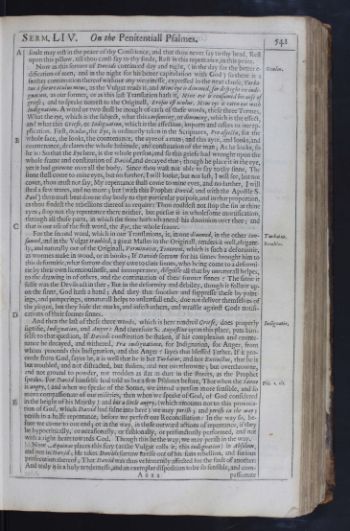 Serm. LIV.
On the Penitentiall Psalmes.
541
soule may rest in the peace of thy Conscience, and that thou never say to thy head, Rest
Serm. LIV.
On the Penitentiall Psalmes.
541
soule may rest in the peace of thy Conscience, and that thou never say to thy head, Rest
upon this pillow, till thou canst say to thy soule, Rest in this repentance, in this peace.
Now as this sorrow of Davids continued day and night, Oculus. (in the day for the better e-
dification of men, and in the night for his better capitulation with God) so there is a
farther continuation thereof without any wearinesse, expressed in the next clause, Turba-
tus à furore oculus meus, as the Vulgat reads it, and Mine eye is dimmed, for despight or indi-
gnation, as our former, or as this last Translation hath it, Mine eye is consumed because of
griefe; and to speake neerest to the Originall, Erosus est oculus, Mine eye is eaten out with
Indignation. A word or two shall be inough of each of these words, these three Termes,
What the eye, which is the subject, what this consuming, or dimming, which is the effect,
and what this Griefe, or Indignation, which is the affection, imports and offers to our ap-
plication. First, Oculus, the Eye, is ordinarily taken in the Scriptures, Pro aspectu, for the
whole face, the looks, the countenance, the ayre of a man; and this ayre, and looks, and
countenance, declares the whole habitude, and constitution of the man; As he looks, so
he is: So that the Eye here, is the whole person; and so this griefe had wrought upon the
whole frame and constitution of David, and decayed that; though he place it in the eye,
yet it had growne over all the body. Since thou wast not able to say to thy sinne, The
sinne shall come to mine eyes, but no farther, I will looke, but not lust, I will see, but not
covet, thou must not say, My repentance shall come to mine eyes, and no farther, I will
shed a few teares, and no more; but (with this Prophet David, and with the Apostle S.
Paul) thou must beat downe thy body to that particular purpose, and in that proportion,
as thou findest the rebellions thereof to require: Thou couldest not stop the sin at thine
eyes; stop not thy repentance there neither, but pursue it in wholesome mortification,
through all those parts, in which the sinne hath advanced his dominion over thee; and
that is our use of the first word, the Eye, the whole frame.
For the second word, which in our Translations, is, in one dimmed, Turbatus.
Reuchlin. in the other con-
sumed, and in the Vulgat troubled, a great Master in the Originall, renders it well, elegant-
ly, and naturally out of the Originall, Verminavit, Tineavit, which is such a deformitie,
as wormes make in wood, or in books; If Davids sorrow for his sinnes brought him to
this deformitie, what sorrow doe they owe to their sinnes, who being come to a deformi-
tie by their own licentiousnesse, and intemperance, disguise all that by unnaturall helpes,
to the drawing in of others, and the continuation of their former sinnes? The sinne it
selfe was the Devils act in thee; But in the deformity and debility, though it follow up-
on the sinne, God hath a hand; And they that smother and suppresse these by paint-
ings, and pamperings, unnaturall helps to unlawfull ends, doe not deliver themselves of
the plague, but they hide the marks, and infect others, and wrastle against Gods notifi-
cations of their former sinnes.
And then the last of these three words, which is here rendred Griefe, Indignatio. does properly
signifie, Indignation, and Anger: And therefore S. Augustine upon this place, puts him-
selfe to that question, If Davids constitution be shaken, if his complexion and counte-
nance be decayed, and withered, Præ indignatione, for Indignation, for Anger, from
whom proceeds this Indignation, and this Anger? sayes that blessed Father. If it pro-
ceede from God, sayes he, it is well that he is but Turbatus, and not Extinctus, that he is
but troubled, and not distracted, but shaken, and not overthrowne; but overthrowne,
and not ground to powder, not trodden as flat as durt in the streets, as the Prophet
speaks. For David himselfe had told us but a few Psalmes before, Psal. 2. ult. That when the Sonne
is angry, (and when we speake of the Sonne, we intend a person more sensible, and so
more compassionate of our miseries, then when we speake of God, of God considered
in the height of his Majesty) and but a little angry, (which amounts not to this provoca-
tion of God, which David had falne into here) we may perish; and perish in the way;
perish in a halfe repentance, before we perfect our Reconciliation: In the way so, be-
fore we come to our end; or in the way, in these outward actions of repentance, if they
be hypocritically, or occasionally, or fashionally, or perfunctorily performed, and not
with a right heart towards God. Though this be the way, we may perish in the way.
Now Aquinas places this fury (as the Vulgat calls it, this indignation) in Absolom,
and not in David; He takes Davids sorrow to rise out of his sons rebellion, and furious
prosecution thereof; That David was thus vehemently affected for the fault of another:
And truly it is a holy tendernesse, and an exemplar disposition to be so sensible, and com-
Aaa2 passionate
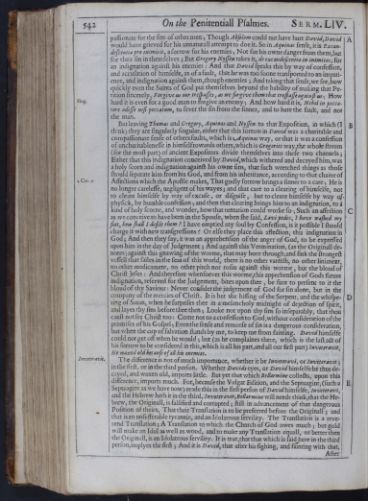 542
On the Penitentiall Psalmes.
Serm. LIV.
passionate for the sins of other men; Though Absolom could not have hurt David, David
542
On the Penitentiall Psalmes.
Serm. LIV.
passionate for the sins of other men; Though Absolom could not have hurt David, David
would have grieved for his unnaturall attempt to doe it. So in Aquinas sense, it is Excan-
descentia pro inimicis, a sorrow for his enemies; Not for his owne danger from them, but
for their sin in themselves; But Gregory Nyssen takes it, de excandescentia in inimicos, for
an indignation against his enemies: And that David speaks this by way of confession,
and accusation of himselfe, as of a fault, that he was too soone transported to an impati-
ence, and indignation against them, though enemies; And taking that sense, we see, how
quickly even the Saints of God put themselves beyond the hability of making that Pe-
tition sincerely, Forgive us our trespasses, as we forgive them that trespasse against us; How
hard it is even for a good man to forgive an enemy;Hug. And how hard it is, Nihil in pecca-
tore odisse nisi peccatum, to sever the sin from the sinner, and to hate the fault, and not
the man.
But leaving Thomas and Gregory, Aquinas and Nyssen to that Exposition, in which (I
think) they are singularly singular, either that this sorrow in David was a charitable and
compassionate sense of others faults, which is Aquinas way, or that it was a confession
of uncharitablenesse in himself towards others, which is Gregories way, the whole stream
(for the most part) of ancient Expositors divide themselves into these two channels;
Either that this indignation conceived by David, which withered and decayed him, was
a holy scorn and indignation against his owne sins, that such wretched things as those
should separate him from his God, and from his inheritance, according to that chaine of
Affections which the Apostle makes, 2 Cor. 7. That godly sorrow brings a sinner to a care; He is
no longer carelesse, negligent of his wayes; and that care to a clearing of himselfe, not
to cleare himselfe by way of excuse, or disguise, but to cleare himselfe by way of
physick, by humble confession; and then that clearing brings him to an indignation, to a
kind of holy scorne, and wonder, how that tentation could worke so; Such an affection
as we conceive to have been in the Spouse, when she said, Lavi pedes, I have washed my
feet, how shall I defile them? I have emptied my soul by Confession, is it possible I should
charge it with new transgressions? Or else they place this affection, this indignation in
God; And then they say, it was an apprehension of the anger of God, to be expressed
upon him in the day of Judgement; And against this Vermination, (as the Originall de-
notes) against this gnawing of the worme, that may bore through, and sink the strongest
vessell that sailes in the seas of this world, there is no other varnish, no other liniment,
no other medicament, no other pitch nor rosin against this worme, but the bloud of
Christ Jesus: And therefore whensoever this worme, this apprehension of Gods future
indignation, reserved for the Judgement, bites upon thee, be sure to present to it the
bloud of thy Saviour: Never consider the judgement of God for sin alone, but in the
company of the mercies of Christ. It is but the hissing of the Serpent, and the whispe-
ring of Satan, when he surprises thee in a melancholy midnight of dejection of spirit,
and layes thy sins before thee then; Looke not upon thy sins so inseparably, that thou
canst not see Christ too: Come not to a confession to God, without consideration of the
promises of his Gospel; Even the sense and remorse of sin is a dangerous consideration,
but when the cup of salvation stands by me, to keep me from fainting. David himselfe
could not get off when he would; but (as he complaines there, which is the last act of
his sorrow to be considered in this, which is all his part, and all our first part) Inveteravit,
He waxed old because of all his enemies.
The difference is not of much importance, Inveteravit. whether it be Inveteravi, or Inveteravit;
in the first, or in the third person. Whether Davids eyes, or David himselfe be thus de-
cayed, and waxen old, imports little. But yet that which Bellarmine collects, upon this
difference, imports much. For, because the Vulgat Edition, and the Septuagint, (such a
Septuagint as we have now) reade this in the first person of David himselfe, Inveteravi,
and the Hebrew hath it in the third, Inveteravit, Bellarmine will needs think, that the He-
brew, the Originall, is falsified and corrupted; still in advancement of that dangerous
Position of theirs, That their Translation is to be preferred before the Originall; and
that is an unsufferable tyrannie, and an Idolatrous servility. The Translation is a reve-
rend Translation; A Translation to which the Church of God owes much; but gold
will make an Idol as well as wood, and to make any Translation equall, or better then
the Originall, is an Idolatrous servility. It is true, that that which is said here in the third
person, implyes the first; And it is David, that after his sighing, and fainting with that, After
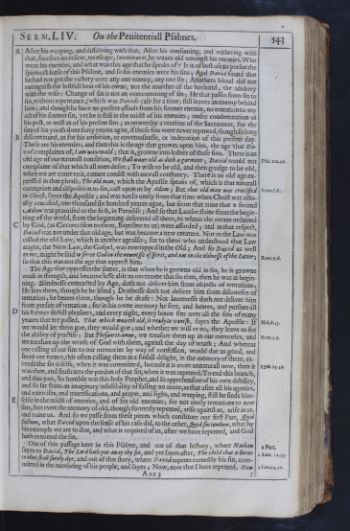 Serm. LIV.
On the Penitentiall Psalmes.
543
After his weeping, and dissolving with that, After his consuming, and withering with
Serm. LIV.
On the Penitentiall Psalmes.
543
After his weeping, and dissolving with that, After his consuming, and withering with
that, foresees no rescue, no escape, Inveteravit, he waxes old amongst his enemies. Who
were his enemies, and what was this age that he speaks of? It is of best use to pursue the
spirituall sense of this Psalme, and so his enemies were his sins; And David found that
he had not got the victory over any one enemy, any one sin; Anothers bloud did not
extinguish the lustfull heat of his owne, nor the murther of the husband, the adultery
with the wife: Change of sin is not an overcomming of sin; He that passes from sin to
sin, without repentance, (which was Davids case for a time) still leaves an enemy behind
him; and though he have no present assault from his former enemie, no tentation to any
act of his former sin, yet he is still in the midst of his enemies; under condemnation of
his past, as well as of his present sins; as unworthy a receiver of the Sacrament, for the
sins of his youth done forty yeares agoe, if those sins were never repented, though so long
discontinued, as for his ambition, or covetousnesse, or indevotion of this present day.
These are his enemies; and then this is the age that growes upon him, the age that Da-
vid complaines of, I am waxen old; that is, growne into habits of these sins. There is an
old age of our naturall condition, We shall waxe old as doth a garment;Psal. 102.26. David would not
complaine of that which all men desire; To wish to be old, and then grudge to be old,
when we are come to it, cannot consist with morall constancy. There is an old age ex-
pressed in that phrase, The old man, which the Apostle speaks of, which is that naturall
corruption and disposition to sin, cast upon us by Adam;Rom. 6.6. But that old man was crucified
in Christ, sayes the Apostle; and was not so onely from that time when Christ was actu-
ally crucified, one thousand six hundred yeares agoe, but from that time that a second
Adam was promised to the first, in Paradise; And so that Lambe slaine from the begin-
ning of the world, from the beginning delivered all them, to whom the means ordained
by God, (as Circumcision to them, Baptisme to us) were afforded; and in that respect,
David was not under that old age, but was become a new creature. Nor as the Law was
called the old Law, which is another age also; for to them who understood that Law
aright, the New Law, the Gospel, was enwrapped in the Old; And so David as well
as we, might be said to serve God in the newnesse of spirit, and not in the oldnesse of the Letter;Rom. 7.6.
so that this was not the age that opprest him.
The Age that oppresses the sinner, is that when he is growne old in sin, he is growne
weak in strength, and become lesse able to overcome that sin then, then he was at begin-
ning. Blindnesse contracted by Age, doth not deliver him from objects of tentations;
He sees them, though he be blind; Deafnesse doth not deliver him from discourses of
tentation; he heares them, though he be deafe: Nor lamenesse doth not deliver him
from pursuit of tentation; for in his owne memory he sees, and heares, and pursues all
his former sinfull pleasures, and every night, every houre sins over all the sins of many
yeares that are passed. That which waxeth old, is ready to vanish, sayes the Apostle:Heb. 8.13. If
we would let them goe, they would goe; and whether we will or no, they leave us for
the ability of practise; But Thesaurizamus, we treasure them up in our memories, Rom. 2.5. and
we treasure up the wrath of God with them, against the day of wrath; And whereas
one calling of our sins to our memories by way of confession, would doe us good, and
serve our turnes, this often calling them in a sinfull delight, in the memory of them, ex-
ceeds the sin it selfe, when it was committed, because it is more unnaturall now, Ezek. 23.19. then it
was then, and frustrates the pardon of that sin, when it was repented. To end this branch,
and this part, So humble was this holy Prophet, and so apprehensive of his own debility,
and so far from an imaginary infallibility of falling no more, as that after all his agonies,
and exercises, and mortifications, and prayer, and sighs, and weeping, still he finds him-
selfe in the midst of enemies, and of his old enemies; for not onely tentations to new
sins, but even the memory of old, though formerly repented, arise against us, arise in us,
and ruine us. And so we passe from these pieces which constitute our first Part, Quid
factum, what David upon the sense of his case did, to the other, Quid faciendum, what by
his example we are to doe, and what is required of us, after we have repented, and God
hath remitted the sin.
Out of this passage here in this Psalme, and out of that history, 2 Part. where Nathan
sayes to David, The Lord hath put away thy sin, and yet sayes after, 2. Sam. 12.13. The child that is borne
to thee shall surely dye, and out of that story, where David repents earnestly his sin, com-
mitted in the numbring of his people, and sayes; Now, now that I have repented, 2 Sam. 24.10. Now Aaa3 I
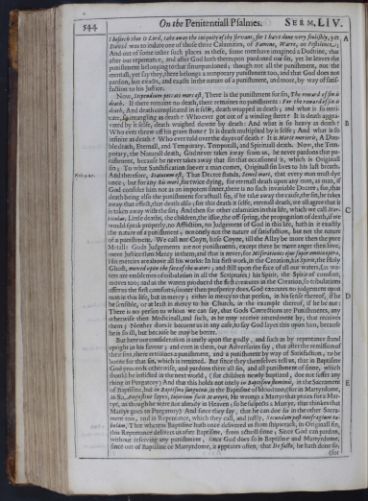 544
On the Penitentiall Psalmes.
Serm. LIV.
I beseech thee O Lord, take away the iniquity of thy servant, for I have done very foolishly, yet
544
On the Penitentiall Psalmes.
Serm. LIV.
I beseech thee O Lord, take away the iniquity of thy servant, for I have done very foolishly, yet
David was to indure one of those three Calamities, of Famine, Warre, or Pestilence;
And out of some other such places as these, some men have imagined a Doctrine, that
after our repentance, and after God hath thereupon pardoned our sin, yet he leaves the
punishment belonging to that sin unpardoned; though not all the punishment, not the
eternall, yet say they, there belongs a temporary punishment too, and that God does not
pardon, but exacts, and exacts in the nature of a punishment, and more, by way of satis-
faction to his Justice.
Now, Stipendium peccati mors est, There is the punishment for sin, The reward of sin is
death. If there remaine no death, there remaines no punishment: For the reward of sin is
death, And death complicated in it selfe, death wrapped in death; and what is so intri-
cate, so intangling as death? Who ever got out of a winding sheet? It is death aggra-
vated by it selfe, death waighed downe by death: And what is so heavy as death?
Who ever threw off his grave stone? It is death multiplied by it selfe; And what is so
infinite as death? Who ever told over the dayes of death? It is Morte morieris, A Dou-
ble death, Eternall, and Temporary. Temporall, and Spirituall death. Now, the Tem-
porary, the Naturall death, God never takes away from us, he never pardons that pu-
nishment, because he never takes away that sin that occasioned it, which is Originall
sin; To what Sanctification soever a man comes, Originall sin lives to his last breath.
And therefore, Heb. 9.27. Statutum est, That Decree stands, Semel mori, that every man must dye
once; but for any Bis mori, for twice dying, for eternall death upon any man, as man, if
God consider him not as an impotent sinner, there is no such invariable Decree; for, that
death being also the punishment for actuall sin, if he take away the cause, the sin, he takes
away that effect, that death also; for this death it selfe, eternall death, we all agree that it
is taken away with the sin; And then for other calamities in this life, which we call Mor-
ticulas, Little deaths, the children, the issue, the off-spring, the propagation of death, if we
would speak properly, no Affliction, no Judgement of God in this life, hath in it exactly
the nature of a punishment; not onely not the nature of satisfaction, but not the nature
of a punishment. We call not Coyn, base Coyne, till the Allay be more then the pure
Metall: Gods Judgements are not punishments, except there be more anger then love,
more Justice then Mercy in them; and that is never; for Miserationes ejus super omnia opera,
His mercies are above all his works: In his first work, in the Creation, his Spirit, the Holy
Ghost, moved upon the face of the waters; and still upon the face of all our waters, (as wa-
ters are emblemes of tribulation in all the Scriptures) his Spirit, the Spirit of comfort,
moves too; and as the waters produced the first creatures in the Creation, so tribulations
offer us the first comforts; sooner then prosperity does. God executes no judgement upon
man in this life, but in mercy; either in mercy to that person, in his sense thereof, if he
be sensible, or at least in mercy to his Church, in the example thereof, if he be not:
There is no person to whom we can say, that Gods Corrections are Punishments, any
otherwise then Medicinall, and such, as he may receive amendment by, that receives
them; Neither does it become us in any case, to say God layes this upon him, because
he is so ill, but because he may be better.
But here our consideration is onely upon the godly, and such as by repentance stand
upright in his favour; and even in them, our Adversaries say, that after the remission of
their sins, there remaines a punishment, and a punishment by way of Satisfaction, to be
borne for that sin, which is remitted. But since they themselves tell us, that in Baptisme
God proceeds otherwise, and pardons there all sin, and all punishment of sinne, which
should be inflicted in the next world, (for children newly baptized, doe not suffer any
thing in Purgatory) And that this holds not onely in Baptismo fluminis, in the Sacrament
of Baptisme, but in Baptismo sanguinis, in the Baptisme of blood too; (for in Martyrdome,
as S. Augustine sayes, Injuriam facit Martyri, He wrongs a Martyr that praies for a Mar-
tyr, as though he were not already in Heaven; so he suspects a Martyr, that thinkes that
Martyr goes to Purgatory) And since they say, that he can doe so in the other Sacra-
ment too, and in Repentance, which they call, and justly, Secundam post naufragium ta-
bulam, That whereas Baptisme hath once delivered us from shipwrack, in Originall sin,
this Repentance delivers us after Baptisme, from actuall sinne; Since God can pardon,
without reserving any punishment, since God does so in Baptisme and Martyrdome,
since out of Baptisme or Martyrdome, it appeares often, that De facto, he hath done so, (for
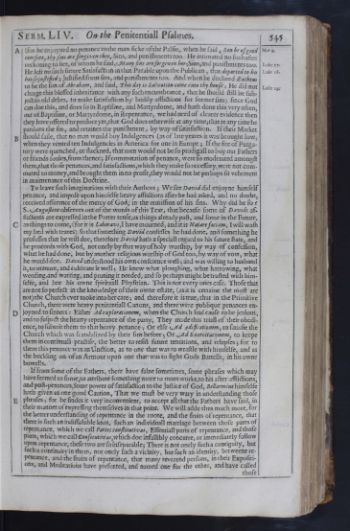 Serm. LIV.
On the Penitentiall Psalmes.
545
(for he enjoyned no penance to the man sicke of the Palsie, when he said, Mat . 9. Son be of good
Serm. LIV.
On the Penitentiall Psalmes.
545
(for he enjoyned no penance to the man sicke of the Palsie, when he said, Mat . 9. Son be of good
comfort, thy sins are forgiven thee, Sins, and punishments too. He intimated no such after
reckoning to her, of whom he said, Many sins are forgiven her; Sins, and punishments too. Luke 17.
He left no such future Satisfaction in that Parable upon the Publican, Luke 18. that departed to his
house justified; Justified from sins, and punishments too. And when he declared Zacheus
to be the son of Abraham, and said, This day is Salvation come unto thy house, Luke 19. He did not
charge this blessed inheritance with any such encumbrance, that he should still be sub-
ject to old debts, to make satisfaction by bodily afflictions for former sins) since God
can doe this, and does so in Baptisme, and Martyrdome, and hath done this very often,
out of Baptisme, or Martyrdome, in Repentance, we had need of clearer evidence then
they have offered to preduce yet, that God does otherwise at any time; that at any time he
pardons the sin, and retaines the punishment, by way of satisfaction. If their Market
should faile, that no man would buy Indulgences (as of late yeares it was brought low,
when they vented ten Indulgencies in America for one in Europe; If the fire of Purga-
tory were quenched, or slackned, that men would not be so prodigall to buy out Fathers
or friends soules, from thence; If commutation of penance, were so moderated amongst
them, that those penances, and satisfactions, which they make so necessary, were not com-
muted to money, and brought them in no profit, they would not be perhaps so vehement
in maintenance of this Doctrine.
To leave such imaginations with their Authors; We see David did enjoyne himself
penance, and impose upon himselfe heavy afflictions after he had asked, and no doubt,
received assurance of the mercy of God, in the remission of his sins. Why did he so?
S. Augustine observes out of the words of this Text, that because some of Davids af-
flictions are expressed in the Preter tense, as things already past, and some in the Future,
as things to come, (for it is Laboravi, I have mourned, and it is Natare faciam, I will wash
my bed with teares) so that something David confesses he had done, and something he
professes that he will doe, therefore David hath a speciall regard to his future state, and
he proceeds with God, not onely by that way of holy worship, by way of confession,
what he had done, but by another religious worship of God too, by way of vow, what
he would doe. David understood his own conscience well; and was willing to husband
it, to manure, and cultivate it well; He knew what ploughing, what harrowing, what
weeding, and watring, and pruning it needed, and so perhaps might be trusted with him-
selfe, and hee his owne spirituall Physitian. This is not every ones case. Those that
are not so perfect in the knowledge of their owne estate, (as it is certaine the most are
not) the Church ever tooke into her care; and therefore it is true, that in the Primitive
Church, there were heavy penitentiall Canons, and there were publique penances en-
joyned to sinners: Either Ad explorationem, when the Church had cause to be jealous,
and to suspect the hearty repentance of the party, They made this triall of their obedi-
ence, to submit them to that heavy penance; Or else Ad ædificationem, to satisfie the
Church which was scandalized by their sins before; Or Ad Exercitationem, to keepe
them in continuall practise, the better to resist future tentations, and relapses; for to
them this penance was an Unction, as to one that was to wrastle with himselfe, and as
the buckling on of an Armour upon one that was to fight Gods Battells, in his owne
bowells.
If from some of the Fathers, there have falne sometimes, some phrases which may
have seemed to some, to attribute something more to mans works, to his after-afflictions,
and post-penances, some power of satisfaction to the Justice of God, Bellarmine himselfe
hath given us one good Caution, That we must be very wary in understanding those
phrases; for he findes it very inconvenient, to accept all that the Fathers have said, in
their manner of expressing themselves in that point. We will adde thus much more, for
the better understanding of repentance in the roote, and the fruits of repentance, that
there is such an indissoluble knot, such an individuall marriage between those parts of
repentance, which we call Partes constitutivas, Essentiall parts of repentance, and those
parts, which we call Consecutivas, which doe infallibly concurre, or immediately follow
upon repentance, these two are so inseparable; There is not onely such a contiguity, but
such a continuity in them, not onely such a vicinity, but such an identity, betweene re-
pentance, and the fruits of repentance, that many reverend persons, in their Expositi-
ons, and Meditations have presented, and named one for the other, and have called those
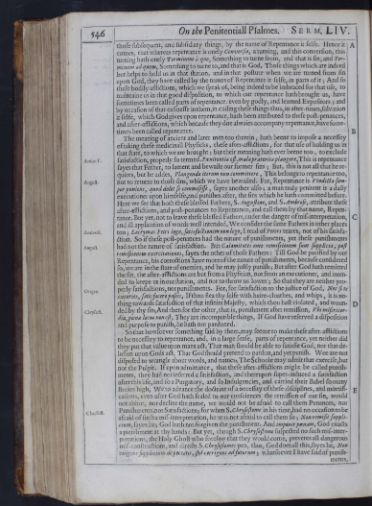 546
On the Penitentiall Psalmes.
Serm. LIV.
those subsequent, and subsidiary things, by the name of Repentance it selfe. Hence it
546
On the Penitentiall Psalmes.
Serm. LIV.
those subsequent, and subsidiary things, by the name of Repentance it selfe. Hence it
comes, that whereas repentance is onely Conversio, a turning, and this conversion, this
turning hath onely Terminum à quo, Something to turne from, and that is sin, and Ter-
minum ad quem, Something to turne to, and that is God, Those things which are indeed
but helps to hold us in that station, and in that posture when we are turned from sin
upon God, they have called by the names of Repentance it selfe, as parts of it; And so
these bodily afflictions, which we speak of, being indeed to be imbraced for that use, to
maintaine us in that good disposition, to which our repentance hath brought us, have
sometimes been called parts of repentance, even by godly, and learned Expositors; and
by occasion of that easinesse in them, in calling these things thus, in after-times, salvation
it selfe, which God gives upon repentance, hath been attributed to these post-penances,
and after-afflictions, which because they doe alwaies accompany repentance, have some-
times been called repentance.
The meaning of ancient and later men too therein, hath beene to impose a necessity
of taking these medicinall Physicks, these after-afflictions, for that use of holding us in
that state, to which we are brought; but their meaning hath ever beene too, to exclude
satisfaction, Ambrose. properly so termed. Pœnitentia est, mala præterita plangere, This is repentance
sayes that Father, to lament and bewaile our former sins; But, this is not all that he re-
quires, but he addes, Plangenda iterum non committere, This belongs to repentance too,
not to returne to those sins, August. which we have bewailed. For, Repentance is Vindicta sem-
per puniens, quod dolet se commisisse, sayes another also; a man truly penitent is a daily
executioner upon himselfe, and punishes after, the sins which he hath committed before.
Here we see that both these blessed Fathers, S. Augustine, and S. Ambrose, attribute these
after-afflictions, and post-penances to Repentance, and call them by that name, Repen-
tance. But yet, not to leave these blessed Fathers, under the danger of mis-interpretation,
and ill application of words well intended, We confider the same Fathers in other places
too;Ambrose. Lacrymas Petri lego, satisfactionem non lego, I read of Peters teares, not of his satisfa-
ction. So if these post-penances had the nature of punishments, yet these punishments
had not the nature of satisfaction.August. But Calamitates ante remissionem sunt supplicia, post
remissionem exercitationes, sayes the other of those Fathers: Till God be pacified by our
Repentance, his corrections have more of the nature of punishments, because considered
so, we are in the state of enemies, and he may justly punish; But after God hath remitted
the sin, the after-afflictions are but from a Physitian, not from an executioner, and inten-
ded to keepe us in our station, and not to throw us lower; So that they are neither pro-
perly satisfactions, Origen. nor punishments. For, for satisfaction to the justice of God, Nec si te
excories, satisfacere possis, If thou flea thy selfe with haire-cloathes, and whips, it is no-
thing towards satisfaction of that infinite Majesty, which thou hast violated, and woun-
ded by thy sin;Chrysost. And then for the other, that is, punishment after remission, Vbi misericor-
dia, pœnæ locus non est, They are incompatible things, If God have reserved a disposition
and purpose to punish, he hath not pardoned.
So that howsoever something said by them, may seeme to make these after-afflictions
to be necessary to repentance, and, in a large sense, parts of repentance, yet neither did
they put that value upon mans act, That man should be able to satisfie God, nor that de-
lusion upon Gods act, That God should pretend to pardon, and yet punish. Wee are not
disposed to wrangle about words, and names; The Schoole may admit that exercise, but
not the Pulpit. If upon admittance, that these after-afflictions might be called punish-
ments, they had not inferred a satisfaction, and thereupon super-induced a satisfaction
after this life, and so a Purgatory, and so Indulgencies, and carried their Babel so many
stories high, We to advance the doctrine of a necessity of these disciplines, and mortifi-
cations, even after God hath sealed to our consciences the remission of our sin, would
not abhor, nor decline the name, we would not be afraid to call them Penances, nor
Punishments, Chrysost. nor Satisfactions; for when S. Chrysostome in his time, had no occasion to be
afraid of such a mis-interpretation, he was not afraid to call them so; Non remisit suppli-
cium, sayes he; God hath not forgiven the punishment; And imponit pœnam, God exacts
a punishment at thy hands: But yet, though S. Chrysostome suspected no such mis-inter-
pretations, the Holy Ghost who foresaw that they would come, prevents all dangerous
mis-constructions, and directs S. Chrysostomes pen, thus, God does all this, sayes he, Non
exigens supplicium de peccatis, sed corrigens ad futurum; whatsoever I have said of punish-
ments,ments;
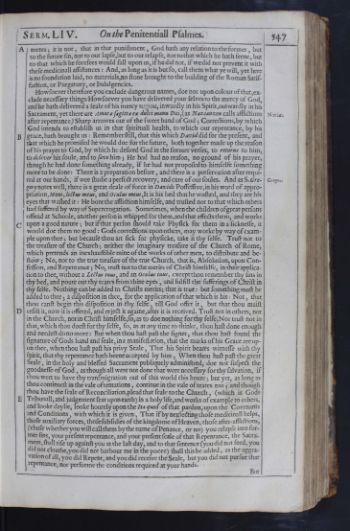 Serm. LIV.
On the Penitentiall Psalmes.
547
ments; it is not, that in that punishment, God hath any relation to the former, but
Serm. LIV.
On the Penitentiall Psalmes.
547
ments; it is not, that in that punishment, God hath any relation to the former, but
to the future sin, not to our lapse, but to our relapse, not to that which he hath seene, but
to that which he foresees would fall upon us, if he did not, if we did not prevent it with
these medicinall assistances: And, as long as it is but so, call them what ye will, yet here
is no foundation laid, no materials, no stone brought to the building of the Roman Satis-
faction, or Purgatory, or Indulgencies.
Howsoever therefore you exclude dangerous names, doe not upon colour of that, ex-
clude necessary things: Howsoever you have delivered your selves to the mercy of God,
and he hath delivered a seale of his mercy to you, inwardly in his Spirit, outwardly in his
Sacrament, yet there are Amaræ sagittæ ex dulci manu Dei, Nazian. (as Nazianzen calls afflictions
after repentance) Sharp arrowes out of the sweet hand of God; Corrections, by which
God intends to establish us in that spirituall health, to which our repentance, by his
grace, hath brought us: Remember still, that this which David did for the present, and
that which he promised be would doe for the future, both together made up the reason
of his prayer to God, by which he desired God in the former verses, to returne to him,
to deliver his soule, and to save him; He had had no reason, no ground of his prayer,
though he had done something already, if he had not proposed to himselfe something
more to be done: There is a preparation before, and there is a preservation after requi-
red at our hands, if wee studie a perfect recovery, and cure of our soules.Gregor. And as S. Gre-
gory notes well, there is a great deale of force in Davids Possessive, in his word of appro-
priation, Meus, lectus meus, and Oculus meus, It is his bed that he washed, and they are his
eyes that washed it: He bore the affliction himselfe, and trusted not to that which others
had suffered by way of Supererogation. Sometimes, when the children of great persons
offend at Schoole, another person is whipped for them, and that affects them, and works
upon a good nature; but if that person should take Physick for them in a sicknesse, it
would doe them no good: Gods corrections upon others, may worke by way of exam-
ple upon thee; but because thou art sick for physicke, take it thy selfe. Trust not to
the treasure of the Church; neither the imaginary treasure of the Church of Rome,
which pretends an inexhaustible mine of the works of other men, to distribute and be-
stow; No, nor to the true treasure of the true Church, that is, Absolution, upon Con-
fession, and Repentance; No, trust not to the merits of Christ himselfe, in their applica-
tion to thee, without a Lectus tuus, and an Oculus tuus, except thou remember thy sins in
thy bed, and poure out thy teares from thine eyes, and fulfill the sufferings of Christ in
thy selfe. Nothing can be added to Christs merits; that is true: but something must be
added to thee; a disposition in thee, for the application of that which is his: Not, that
thou canst begin this disposition in thy selfe, till God offer it, but that thou maist
resist it, now it is offered, and reject it againe, after it is received. Trust not in others, not
in the Church, nor in Christ himselfe, so, as to doe nothing for thy selfe; Nor trust not in
that, which thou doest for thy selfe, so, as at any time to thinke, thou hast done enough
and needest do no more: But when thou hast past the signet, that thou hast found the
signature of Gods hand and seale, in a manifestation, that the marks of his Grace are up-
on thee, when thou hast past his privy Seale, That his Spirit beares witnesse with thy
spirit, that thy repentance hath beene accepted by him, When thou hast past the great
Seale, in the holy and blessed Sacrament publiquely administred, doe not suspect the
goodnesse of God, as though all were not done that were necessary for thy salvation, if
thou wert to have thy transmigration out of this world this houre; but yet, as long as
thou continuest in the vale of tentations, continue in the vale of teares too; and though
thou have the seale of Reconciliation, plead that seale to the Church, (which is Gods
Tribunall, and judgement seat upon earth) in a holy life, and works of example to others,
and looke daylie, looke hourely upon the Ita quod of that pardon, upon the Covenants
and Conditions, with which it is given, That if by neglecting those medicinall helps,
those auxiliary forces, those subsidies of the kingdome of Heaven, those after-afflictions,
(chuse whether you will call them by the name of Penance, or no) you relapse into for-
mer sins, your present repentance, and your present seale of that Repentance, the Sacra-
ment, shall rise up against you at the last day, and to that sentence (you did not feed, you
did not cloathe, you did not harbour me in the poore) shall this be added, as the aggra-
vation of all, you did Repent, and you did receive the Seale, but you did not pursue that
repentance, nor performe the conditions required at your hands. But
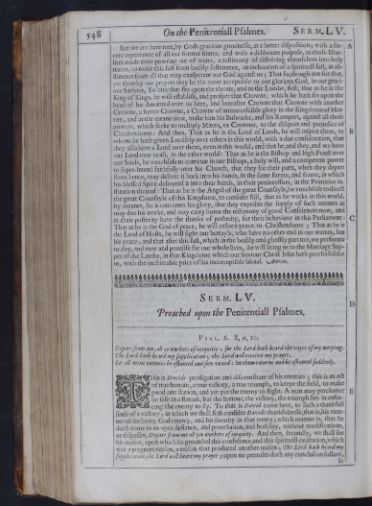 548
On the Penitentiall Psalmes.
Serm. LV.
548
On the Penitentiall Psalmes.
Serm. LV.
But we are here met, by Gods gracious goodnesse, in a better disposition; with a sin-
cere repentance of all our former sinnes, and with a deliberate purpose, as those Israe-
lites made their powring out of water, a testimony of dissolving themselves into holy
teares, to make this fast from bodily sustenance, an inchoation of a spirituall fast, in ab-
stinence from all that may exasperate our God against us; That so, though not for that,
yet thereby our prayers may be the more acceptable to our glorious God, in our graci-
ous Saviour, To him that sits upon the throne, and to the Lambe, first, that as he is the
King of Kings, he will establish, and prosper that Crowne, which he hath set upon the
head of his Anointed over us here, and hereafter Crowne that Crowne with another
Crowne, a better Crowne, a Crowne of immarcescible glory in the Kingdome of Hea-
ven, and in the meane time, make him his Bulwarke, and his Rampart, against all those
powers, which seeke to multiply Miters, or Crownes, to the disquiet and prejudice of
Christendome: And then, That as he is the Lord of Lords, he will inspire them, to
whom he hath given Lordship over others in this world, with a due consideration, that
they also have a Lord over them, even in this world; and that he, and they, and we have
one Lord over us all, in the other world: That as he is the Bishop and high Priest over
our Souls, he vouchsafe to continue in our Bishops, a holy will, and a competent power
to super-intend faithfully over his Church, that they for their parts, when they depart
from hence, may deliver it back into his hands, in the same forme, and frame, in which
his blessed Spirit delivered it into their hands, in their predecessors, in the Primitive in-
stitution thereof: That as he is the Angel of the great Counsayle, he vouchsafe to direct
the great Counsayle of this Kingdome, to consider still, that as he works in this world,
by meanes, So it concernes his glory, that they expedite the supply of such meanes as
may doe his worke, and may carry home the testimony of good Consciences now, and
in their posterity have the thanks of posterity, for their behaviour in this Parliament:
That as he is the God of peace, he will restore peace to Christendome; That as he is
the Lord of Hosts, he will fight our battayls, who have no other end in our warres, but
his peace; and that after this fast, which in the bodily and ghostly part too, we performe
to day, and vow and promise for our whole lives, he will bring us to the Marriage Sup-
per of the Lambe, in that Kingdome which our Saviour Christ Jesus hath purchased for
us, with the inestimable price of his incorruptible bloud. Amen.
Serm. LV.
Preached upon the Penitentiall Psalmes.
Psal. 6.8,9,10.
Depart from me, all ye workers of iniquitie; for the Lord hath heard the voyce of my weeping.
The Lord hath heard my supplication; the Lord will receive my prayer.
Let all mine enemies be ashamed and sore vexed: let them returne and be ashamed suddenly.
THisThis is Davids profligation and discomfiture of his enemies; this is an act
of true honour, a true victory, a true triumph, to keepe the field, to make
good one station, and yet put the enemy to flight. A man may perchance
be safe in a Retrait, but the honour, the victory, the triumph lies in enfor-
cing the enemy to fly. To that is David come here, to such a thankfull
sense of a victory; in which we shall first confider Davids thankfulnesse, that is, his man-
ner of declaring Gods mercy, and his security in that mercy; which manner is, that he
durst come to an open defiance, and protestation, and hostility, without modifications,
or disguises, Depart from me all yee workers of iniquity. And then, secondly, we shall see
his reason, upon which he grounded this confidence, and this spirituall exultation, which
was a pregnant reason, a reason that produced another reason; The Lord hath heard my
supplication, the Lord will heare my prayer; upon no premises doth any conclusion follow, so
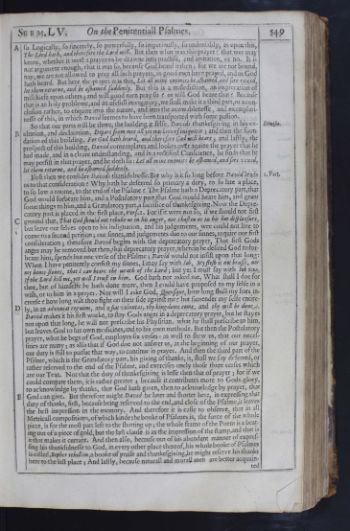 Serm. LV.
On the Penitentiall Psalmes.
549
so Logically, so sincerely, so powerfully, so imperiously, so undeniably, as upon this,
Serm. LV.
On the Penitentiall Psalmes.
549
so Logically, so sincerely, so powerfully, so imperiously, so undeniably, as upon this,
The Lord hath, and therefore the Lord will. But then what was this prayer? that wee may
know, whether it were a prayer to be drawne into practise, and imitation, or no. It is
not argument enough, that it was so, because God heard it then; for we are not bound,
nay, we are not allowed to pray all such prayers, as good men have prayed, and as God
hath heard. But here the prayer was this, Let all mine enemies be ashamed, and sore vexed,
let them returne, and be ashamed suddenly. But this is a malediction, an imprecation of
mischiefe upon others; and will good men pray so? or will God heare that? Because
that is an holy probleme, and an usefull intergatory, we shall make it a third part, or a con-
clusion rather, to enquire into the nature, and into the avowablenesse, and exemplari-
nesse of this, in which David seemes to have been transported with some passion.
So that our parts will be three, the building it selfe, Davids thankesgiving in his Divisio. ex-
ultation, and declaration, Depart from mee all yee workers of iniquitie; and then the foun-
dation of this building, For God hath heard, and therefore God will heare; and lastly, the
prospect of this building, David contemplates and lookes over againe the prayer that he
had made, and in a cleare understanding, and in a rectified Conscience, he finds that he
may persist in that prayer, and he doth so: Let all mine enemies be ashamed, and sore vexed,
let them returne, and be ashamed suddenly.
First then we consider Davids thankfulnesse: But why is it so long before David leads 1. Part.
us to that consideration? Why hath he deferred so primary a duty, to so late a place,
to so low a roome, to the end of the Psalme? The Psalme hath a Deprecatory part, that
God would forbeare him, and a Postulatory part, that God would heare him, and grant
some things to him, and a Gratulatory part, a sacrifice of thankesgiving. Now the Depre-
catory part is placed in the first place, Vers. 1. For if it were not so, if we should not first
ground that, That God should not rebuke us in his anger, nor chasten us in his hot displeasure,
but leave our selves open to his indignation, and his judgements, wee could not live to
come to a second petition; our sinnes, and judgements due to our sinnes, require our first
consideration; therefore David begins with the deprecatory prayer, That first Gods
anger may be removed: but then, that deprecatory prayer, wherein he desired God to for-
beare him, spends but one verse of the Psalme; David would not insist upon that long:
When I have penitently confest my sinnes, I may say with Iob, My flesh is not brasse, nor
my bones stones, that I can beare the wrath of the Lord; but yet I must say with Iob too,
If the Lord kill me, yet will I trust in him. God hath not asked me, What shall I doe for
thee, but of himselfe he hath done more, then I could have proposed to my selfe in a
wish, or to him in a prayer. Nor will I aske God, Quousque, how long shall my foes in-
crease? how long wilt thou fight on their side against me? but surrender my selfe entire-
ly, in an adveniat regnum, and a fiat voluntas, thy kingdome come, and thy will be done.
David makes it his first worke, to stay Gods anger in a deprecatory prayer, but he stayes
not upon that long, he will not prescribe his Physitian, what he shall prescribe to him,
but leaves God to his own medicines, and to his own methode. But then the Postulatory
prayer, what he begs of God, employes six verses: as well to shew us, that our neces-
sities are many; as also that if God doe not answer us, at the beginning of our prayer,
our duty is still to pursue that way, to continue in prayer. And then the third part of the
Psalme, which is the Gratulatory part, his giving of thanks, is, shall we say deferred, or
rather reserved to the end of the Psalme, and exercises onely those three verses which
are our Text. Not that the duty of thankesgiving is lesse then that of prayer; for if we
could compare them, it is rather greater; because it contributes more to Gods glory,
to acknowledge by thanks, that God hath given, then to acknowledge by prayer, that
God can give. But therefore might David be later and shorter here, in expressing that
duty of thanks, first, because being reserved to the end, and close of the Psalme, it leaves
the best impression in the memory. And therefore it is easie to observe, that in all
Metricall compositions, of which kinde the booke of Psalmes is, the force of the whole
piece, is for the most part left to the shutting up; the whole frame of the Poem is a beat-
ing out of a piece of gold, but the last clause is as the impression of the stamp, and that is
it that makes it currant. And then also, because out of his abundant manner of expres-
sing his thankfulnesse to God, in every other place thereof, his whole booke of Psalmes
is called, Sepher tehillim, a booke of praise and thankesgiving, he might reserve his thanks
here to the last place; And lastly, because naturall and morall men are better acquain-
ted
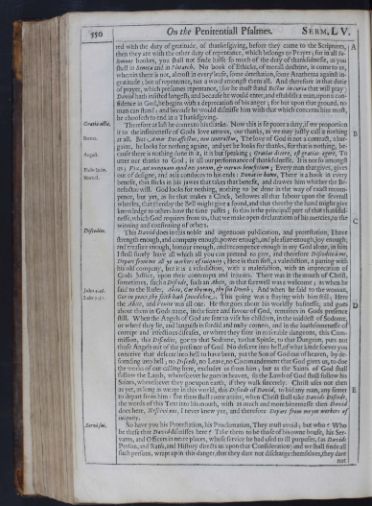 550
On the Penitentiall Psalmes.
Serm. LV.
ted with the duty of gratitude, of thankesgiving, before they come to the Scriptures,
550
On the Penitentiall Psalmes.
Serm. LV.
ted with the duty of gratitude, of thankesgiving, before they come to the Scriptures,
then they are with the other duty of repentance, which belongs to Prayer; for in all So-
lomons bookes, you shall not finde halfe so much of the duty of thankfulnesse, as you
shall in Seneca and in Plutarch. No book of Ethicks, of morall doctrine, is come to us,
wherein there is not, almost in every leafe, some detestation, some Anathema against in-
gratitude; but of repentance, not a word amongst them all. And therefore in that dutie
of prayer, which presumes repentance, (for he must stand Rectus in curia that will pray)
David hath insisted longest; and because he would enter, and establish a man, upon a con-
fidence in God, he begins with a deprecation of his anger; for but upon that ground, no
man can stand; and because he would dismisse him with that which concerns him most,
he chooseth to end in a Thanksgiving.
Therefore at last he comes to his thanks.Gratiæ actæ. Now this is so poore a duty, if we proportion
it to the infinitenesse of Gods love unto us, our thanks, as we may justly call it nothing
at all.Bernar. But Amor Dei affectus, non contractus, The love of God is not a contract, a bar-
gaine, he looks for nothing againe, and yet he looks for thanks, for that is nothing, be-
cause there is nothing done in it, August. it is but speaking; Gratias dicere, est gratias agere, To
utter our thanks to God, is all our performance of thankfulnesse. It is not so amongst
us;Philo Iudæ. Vix, aut nunquam apud nos purum, & merum beneficium; Every man that gives, gives
out of designe, Martial. and as it conduces to his ends: Donat in hamo, There is a hook in every
benefit, that sticks in his jawes that takes that benefit, and drawes him whither the Be-
nefactor will. God looks for nothing, nothing to be done in the way of exact recom-
pence, but yet, as he that makes a Clock, bestowes all that labour upon the severall
wheeles, that thereby the Bell might give a sound, and that thereby the hand might give
knowledge to others how the time passes; so this is the principall part of that thankful-
nesse, which God requires from us, that we make open declarations of his mercies, to the
winning and confirming of others.
This David does in this noble and ingenuous publication, Discedite. and protestation, I have
strength enough, and company enough, power enough, and pleasure enough, joy enough,
and treasure enough, honour enough, and recompence enough in my God alone, in him
I shall surely have all which all you can pretend to give, and therefore Discedite à me,
Depart from me all ye workers of iniquity; Here is then first, a valediction, a parting with
his old company, but it is a valediction, with a malediction, with an imprecation of
Gods Justice, upon their contempts and injuries. There was in the mouth of Christ,
sometimes, such a Discede, such an Abito, as that farewell was a welcome; as when he
said to the Ruler, John 4.46.
Luke 7.50. Abito, Goe thy way, thy son liveth; And when he said to the woman,
Goe in peace, thy faith hath saved thee. This going was a staying with him still; Here
the Abite, and Venite was all one. He that goes about his worldly businesse, and goes
about them in Gods name, in the feare and favour of God, remaines in Gods presence
still. When the Angels of God are sent to visit his children, in the middest of Sodome,
or where they lie, and languish in sordid and nasty corners, and in the loathsomenesse of
corrupt and infectious diseases, or where they faint in miserable dungeons, this Com-
mission, this Discedite, goe to that Sodome, to that Spittle, to that Dungeon, puts not
those Angels out of the presence of God. No descent into hell, of what kinde soever you
conceive that descent into hell to have been, put the Son of God out of heaven, by de-
scending into hell; no Discede, no Leave, no Commandement that God gives us, to doe
the works of our calling here, excludes us from him; but as the Saints of God shall
follow the Lamb, wheresoever he goes in heaven, so the Lamb of God shall follow his
Saints, wheresoever they goe upon earth, if they walk sincerely. Christ uses not then
as yet, as long as we are in this world, this Discede of David, to bid any man, any sinner
to depart from him: But there shall come a time, when Christ shall take Davids Discede,
the words of this Text into his mouth, with as much and more bitternesse then David
does here, Nescivi nos, I never knew yee, and therefore Depart from me yee workers of
iniquity.
So have you his Protestation, Servi sui. his Proclamation, They must avoid; but who? Who
be these that David dismisses here? Take them to be those of his owne house, his Ser-
vants, and Officers in neare places, whose service he had used to ill purposes, (as Davids
Person, and Rank, and History directs us upon that Consideration) and we shall finde all
such persons, wrapt up in this danger, that they dare not discharge themselves, they dare not
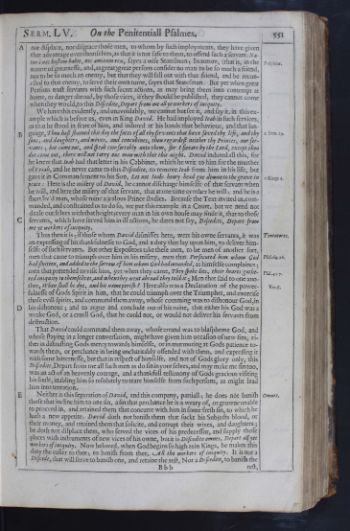 Serm. LV.
On the Penitentiall Psalmes.
551
not displace, nor disgrace those men, to whom by such imployments, they have given
Serm. LV.
On the Penitentiall Psalmes.
551
not displace, nor disgrace those men, to whom by such imployments, they have given
that advantage over themselves, as that it is not safe to them, to offend such a servant. Na-
turâ nec hostem habet, nec amicum rex, sayes a wise Statesman; In nature, (that is, Polybius. in the
nature of greatnesse, and, as great) great persons consider no man to be so much a friend,
nor to be so much an enemy, but that they will fall out with that friend, and be recon-
ciled to that enemy, to serve their own turne, sayes that Statesman. But yet when great
Persons trust servants with such secret actions, as may bring them into contempt at
home, or danger abroad, by those vices, if they should be published, they cannot come
when they would, to this Discedite, Depart from me all ye workers of iniquity.
We have this evidently, and unavoidably, we cannot but see it, and say it, in this ex-
ample which is before us, even in King David. He had imployed Ioab in such services,
as that he stood in feare of him, and indured at his hands that behaviour, and that lan-
guage, Thou hast shamed this day the faces of all thy servants that have saved thy life,2 Sam. 19. and thy
sons, and daughters, and wives, and concubines, thou regardest neither thy Princes, nor ser-
vants; but come out, and speak comfortably unto them, for I sweare by the Lord, except thou
doe come out, there will not tarry one man with thee this night. David indured all this, for
he knew that Ioab had that letter in his Cabbinet, which he writ to him for the murther
of Vriah, and he never came to this Discedite, to remove Ioab from him in his life, but
gave it in Commandement to his Son, 1 Kings 2. Let not Ioabs hoary head goe downe to the grave in
peace: Here is the misery of David, he cannot discharge himselfe of that servant when
he will, and here the misery of that servant, that at one time or other he will; and he is a
short liv'd man, whose ruine a jealous Prince studies. Because the Text invited us, com-
manded, and constrained us to do so, we put this example in a Court, but we need not
dazle our selves with that height; every man in his own house may finde it, that to those
servants, which have served him in ill actions, he dares not say, Discedite, Depart from
me ye workers of iniquity.
Thus then it is; if those whom David dismisses here, were his owne servants, Tentatores. it was
an expressing of his thankfulnesse to God, and a duty that lay upon him, to deliver him-
selfe of such servants. But other Expositors take these men, to be men of another sort,
men that came to triumph over him in his misery, Psal. 69.26. men that Persecuted him whom God
had smitten, and added to the sorrow of him whom God had wounded, as himselfe complaines;
men that pretended to visit him, yet when they came, They spoke lies,Psal. 41.7. their hearts gathe-
red iniquity to themselves, and when they went abroad they told it; Men that said to one ano-
ther, When shall he dye, and his name perish?Ver. 6. Here also was a Declaration of the power-
fulnesse of Gods Spirit in him, that he could triumph over the Triumpher, and exorcise
those evill spirits, and command them away, whose comming was to dishonour God, in
his dishonour; and to argue and conclude out of his ruine, that either his God was a
weake God, or a cruell God, that he could not, or would not deliver his servants from
destruction.
That David could command them away, whose errand was to blaspheme God, and
whose staying in a longer conversation, might have given him occasion of new sins, ei-
ther in distrusting Gods mercy towards himselfe, or in murmuring at Gods patience to-
wards them, or perchance in being uncharitably offended with them, and expressing it
with some bitternesse, but that in respect of himselfe, and not of Gods glory only, this
Discedite, Depart from me all such men as do sin in yourselves, and may make me sin too,
was an act of an heavenly courage, and a thankfull testimony of Gods gracious visiting
his soule, inabling him so resolutely to teare himselfe from such persons, as might lead
him into tentation.
Neither is this separation of David, and this company, partiall;Omnes. he does not banish
those that incline him to one sin, a sin that perchance he is a weary of, or growne unable
to proceed in, and retained them that concurre with him in some fresh sin, to which he
hath a new appetite. David doth not banish them that suckt his Subjects blood, or
their money, and retained them that solicite, and corrupt their wives, and daughters;
he doth not displace them, who served the vices of his predecessor, and supply those
places with instruments of new vices of his owne, but it is Discedite omnes, Depart all yee
workers of iniquity. Now beloved, when God begins so high as in Kings, he makes this
duty the easier to thee; to banish from thee, All the workers of iniquity. It is not a
Discede, that will serve to banish one, and retaine the rest, Nor a Discedite, to banish the Bbb rest,
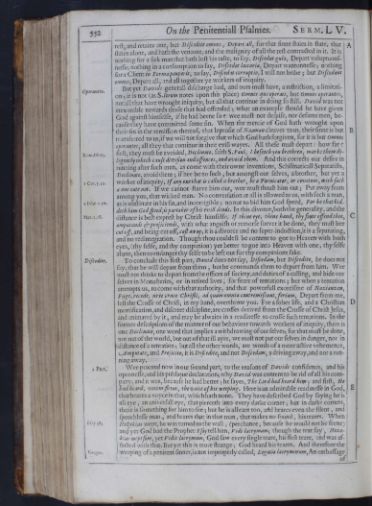 552
On the Penitentiall Psalmes.
Serm. LV.
rest, and retaine one, but Discedite omnes, Depart all, for that sinne staies in state, that
552
On the Penitentiall Psalmes.
Serm. LV.
rest, and retaine one, but Discedite omnes, Depart all, for that sinne staies in state, that
staies alone, and hath the venome, and the malignity of all the rest contracted in it. It is
nothing for a sick man that hath lost his taste, to say, Discedat gula, Depart voluptuous-
nesse; nothing in a consumption to say, Discedat luxuria, Depart wantonnesse; nothing
for a Client in Forma pauperis, to say, Discedat corruptio, I will not bribe; but Discedant
omnes, Depart all, and all together ye workers of iniquity.
But yet Davids generall discharge had, Operantes. and ours must have, a restriction, a limitati-
on; it is not (as S. Ierom notes upon this place) Omnes qui operati, but Omnes operantes,
not all that have wrought iniquity, but all that continue in doing so still. David was not
inexorable towards those that had offended; what an example should he have given
God against himselfe, if he had beene so? wee must not despise, nor defame men, be-
cause they have committed some sin. When the mercie of God hath wrought upon
their sin in the remission thereof, that leprosie of Naaman cleaves to us, their sinne is but
transferred to us, if we will not forgive that which God hath forgiven, for it is but Omnes
operantes, all they that continue in their evill wayes. All these must depart: how far?
first, Rom. 16.17. they must be avoided, Declinate, saith S. Paul, I beseech you brethren, marke them di-
ligently which cause division and offences, and avoid them. And this corrects our desire in
running after such men, as come with their owne inventions, Schismaticall Separatists,
Declinate, avoid them; if hee be no such, but amongst our selves, a brother, but yet a
worker of iniquity, 1 Cor. 5.11. If any one that is called a brother, be a Fornicator, or covetous, with such
a one eate not. If we cannot starve him out, wee must thrust him out; Put away from
among you, that wicked man. No conversation at all is allowed to us, with such a man,
as is obstinate in his sin, 2 Iohn 1.10. and incorrigible; no not to bid him God speed, For he that bid-
deth him God speed, is partaker of his evill deeds. In this divorce, both the generality, and the
distance is best exprest by Christ himselfe, Mat. 5.28. If thine eye, thine hand, thy foote offend thee,
amputandi & projiciendi, with what anguish or remorse soever it be done, they must bee
cut off, and being cut off, cast away; it is a divorce and no super-induction, it is a separating,
and no redintegration. Though thou couldest be content to goe to Heaven with both
eyes, (thy selfe, and thy companion) yet better to goe into Heaven with one, thy selfe
alone, then to endanger thy selfe to be left out for thy companions sake.
To conclude this first part, Discedite. David does not say, Discedam, but Discedite, he does not
say, that he will depart from them, but he commands them to depart from him. Wee
must not thinke to depart from the offices of society, and duties of a calling, and hide our
selves in Monasteries, or in retired lives, for feare of tentations; but when a tentation
attempts us, to come with that authority, and that powerfull exorcisme of Nazianzen,
Fuge, recede, ne te cruce Christi, ad quam omnia contremiscunt, feriam, Depart from me,
lest the Crosse of Christ, in my hand, overthrow you. For a sober life, and a Christian
mortification, and discreet discipline, are crosses derived from the Crosse of Christ Jesus,
and animated by it, and may be alwaies in a readinesse to crosse such tentations. In the
former descriptions of the manner of our behaviour towards workers of iniquity, there is
one Declinate, one word that implies a withdrawing of our selves; for that must be done,
not out of the world, but out of that ill ayre, we must not put our selves in danger, nor in
distance of a tentation; but all the other words, are words of a more active vehemence,
Amputate, and Projicite; it is Discedite, and not Discedam, a driving away, and not a run-
ning away.
Wee proceed now in our second part, 2 Part. to the reasons of Davids confidence, and his
opennesse, and his publique declaration; why David was content to be rid of all his com-
pany; and it was, because he had better; he sayes, The Lord had heard him; and first, He
had heard, vocem fletus, the voice of his weeping. Here is an admirable readinesse in God,
that heares a voyce in that, which hath none. They have described God by saying he is
all eye, an universall eye, that pierceth into every darke corner; but in darke corners,
there is something for him to see; but he is all eare too, and heares even the silent, and
speechlesse man, and heares that in that man, that makes no sound, his teares. When
Hezekias wept, Esay 38. he was turned to the wall, (perchance, because he would not be seene)
and yet God bad the Prophet Esay tell him, Vidi lacrymam; though the text say, Heze-
kias wept sore, yet Vidit lacrymam, God saw every single teare, his first teare, and was af-
fected with that. But yet this is more strange; God heard his teares. And therefore the
weeping of a penitent sinner, Gregor. is not improperly called, Legatio lacrymarum, An embassage of
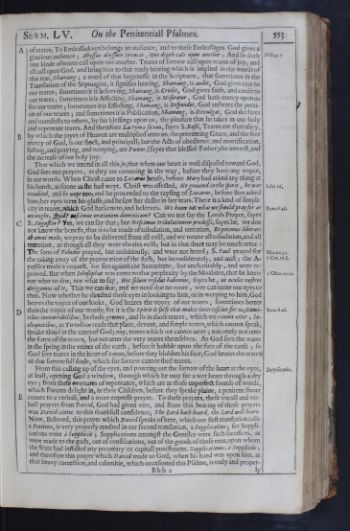 Serm. LV.
On the Penitentiall Psalmes.
553
of teares; To Embassadours belongs an audience, and to these Embassages God gives a
Serm. LV.
On the Penitentiall Psalmes.
553
of teares; To Embassadours belongs an audience, and to these Embassages God gives a
gracious audience; Abyssus abyssum invocat, One depth cals upon another;Psal 43.7. And so doth
one kinde of teares call upon one another. Teares of sorrow call upon teares of joy, and
all call upon God, and bring him to that ready hearing which is implied in the words of
this text, Shamang; a word of that largenesse in the Scriptures, that sometimes in the
Translation of the Septuagint, it signifies hearing, Shamang, is audit, God gives eare to
our teares; sometimes it is beleeving, Shamang, is Credit, God gives faith, and credit to
our teares; sometimes it is Affecting, Shamang, is Miseretur, God hath mercy upon us
for our teares; sometimes it is Effecting, Shamang, is Respondet, God answers the petiti-
on of our teares; and sometimes it is Publication, Shamang, is Divulgat, God declares
and manifests to others, by his blessings upon us, the pleasure that he takes in our holy
and repentant teares. And therefore Lacrymæ fœnus, sayes S. Basil, Teares are that usury,
by which the joyes of Heaven are multiplied unto us; the preventing Grace, and the free
mercy of God, is our stock, and principall; but the Acts of obedience, and mortification,
fasting, and praying, and weeping, are Fœnus, (sayes that blessed Father) the interest, and
the increase of our holy joy.
That which we intend in all this, is, that when our heart is well disposed toward God,
God sees our prayers, as they are comming in the way, before they have any voyce,
in our words. When Christ came to Lazarus house, before Mary had asked any thing at
his hands, as soone as she had wept, Christ was affected, He groaned in the spirit,Iohn 11. he was
troubled, and he wept too; and he proceeded to the raysing of Lazarus, before shee asked
him; her eyes were his glasse, and he saw her desire in her tears. There is a kind of simpli-
city in teares, which God harkens to, and beleeves.Rom. 8.26. We know not what we should pray for as
we ought. Quid? nescimus orationem dominicam? Can we not say the Lords Prayer, sayes
S. Augustin? Yes, we can say that; but Nescimus tribulationem prodesse, sayes he, we doe
not know the benefit, that is to be made of tribulation, and tentation, Et petimus liberari
ab omni malo, we pray to be delivered from all evill, and we meane all tribulation, and all
tentation, as though all they were alwaies evill; but in that there may be much error:
The sons of Zebedee prayed, but ambitiously, and were not heard;Mat. 20.22.
2 Cor. 12.8. S. Paul prayed for
the taking away of the provocation of the flesh, but inconsiderately, and mist; the A-
postles made a request, for fire against the Samaritans, but uncharitably, and were re-
proved. But when Iehosaphat was come to that perplexity by the Moabites, 2 Chro. 20.12. that he knew
not what to doe, nor what to say, Hoc solum residui habemus, sayes he, ut oculos nostros
dirigamus ad te, This we can doe, and we need doe no more, wee can turne our eyes to
thee. Now whether he directed those eyes in looking to him, or in weeping to him, God
heares the voyce of our looks, God heares the voyce of our teares, sometimes better
then the voyce of our words, for it is the Spirit it selfe that makes intercession for us, Rom. 8.26. Gemi-
tibus inenarrabilibus, In those groanes, and so in those teares, which we cannot utter; In-
eloquacibus, as Tertullian reads that place, devout, and simple teares, which cannot speak,
speake aloud in the eares of God; nay, teares which we cannot utter; not onely not utter
the force of the teares, but not utter the very teares themselves. As God sees the water
in the spring in the veines of the earth, before it bubble upon the face of the earth; so
God sees teares in the heart of a man, before they blubber his face; God heares the teares
of that sorrowfull soule, which for sorrow cannot shed teares.
From this casting up of the eyes, and powring out the sorrow of the heart at the eyes, Supplicatio.
at least, opening God a window, through which he may see a wet heart through a dry
eye; from these overtures of repentance, which are as those unperfect sounds of words,
which Parents delight in, in their Children, before they speake plaine, a penitent sinner
comes to a verball, and a more expresse prayer. To these prayers, these vocall and ver-
ball prayers from David, God had given eare, and from this hearing of those prayers
was David come to this thankfull confidence, The Lord hath heard, the Lord will heare.
Now, Beloved, this prayer which David speaks of here, which our first translation calls
a Petition, is very properly rendred in our second translation, a Supplication; for Suppli-
cations were à Suppliciis; Supplications amongst the Gentiles were such sacrifices, as
were made to the gods, out of confiscations, out of the goods of those men, upon whom
the State had inflicted any pecuniary or capitall punishment. Supplicationes, à Suppliciis;
and therefore this prayer which David made to God, when his hand was upon him, in
that heavy correction, and calamitie, which occasioned this Psalme, is truly and proper-
Bbb2 ly
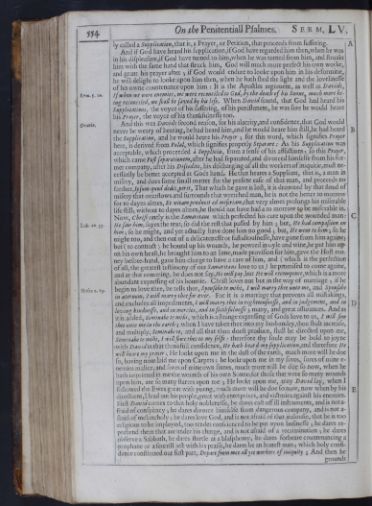 554
On the Penitentiall Psalmes.
Serm. LV.
ly called a Supplication, that is, a Prayer, or Petition, that proceeds from suffering.
554
On the Penitentiall Psalmes.
Serm. LV.
ly called a Supplication, that is, a Prayer, or Petition, that proceeds from suffering.
And if God have heard his supplication, if God have regarded him then, when he was
in his displeasure, if God have turned to him, when he was turned from him, and stroakt
him with the same hand that struck him, God will much more perfect his own worke,
and grant his prayer after; if God would endure to looke upon him in his deformitie,
he will delight to looke upon him then, when he hath shed the light and the lovelinesse
of his owne countenance upon him: It is the Apostles argument, as well as Davids,
If when we were enemies,Rom. 5.10. we were reconciled to God, by the death of his Sonne, much more be-
ing reconciled, we shall be saved by his life. When David found, that God had heard his
Supplications, the voyce of his suffering, of his punishment, he was sure he would heare
his Prayer, the voyce of his thankfulnesse too.
And this was Davids second reason, Oratio. for his alacrity, and confidence, that God would
never be weary of hearing, he had heard him, and he would heare him still, he had heard
the Supplication, and he would heare his Prayer; for this word, which signifies Prayer
here, is derived from Palal, which signifies properly Separare: As his Supplication was
acceptable, which proceeded à Suppliciis, from a sense of his afflictions; so this Prayer,
which came Post separationem, after he had separated, and divorced himselfe from his for-
mer company, after his Discedite, his discharging of all the workers of iniquitie, must ne-
cessarily be better accepted at Gods hand. He that heares a Suppliant, that is, a man in
misery, and does some small matter for the present ease of that man, and proceeds no
farther, Ipsum quod dedit, perit, That which he gave is lost, it is drowned by that floud of
misery that overflows and surrounds that wretched man, he is not the better to morrow
for to dayes almes, Et vitam producit ad miseriam, that very almes prolongs his miserable
life still; without to dayes almes, he should not have had a to morrow to be miserable in.
Now, Christ onely is the Samaritane which perfected his cure upon the wounded man:
He saw him, Luk. 10.33. sayes the text, so did the rest that passed by him; but, He had compassion on
him; so he might, and yet actually have done him no good; but, He went to him; so he
might too, and then out of a delicatenesse or fastidiousnesse, have gone from him againe;
but (to contract) he bound up his wounds, he powred in oyle and wine, he put him up-
on his own beast, he brought him to an Inne, made provision for him, gave the Host mo-
ney before-hand, gave him charge to have a care of him, and (which is the perfection
of all, the greatest testimony of our Samaritans love to us) he promised to come againe,
and at that comming, he does not say, He will pay, but He will recompence, which is a more
abundant expressing of his bountie. Christ loves not but in the way of marriage; if he
begin to love thee, Hosea 2.19. he tells thee, Sponsabo te mihi, I will marry thee unto me, and Sponsabo
in æternum, I will marry thee for ever. For it is a marriage that prevents all mistakings,
and excludes all impediments, I will marry thee in righteousnesse, and in judgement, and in
loving kindnesse, and in mercies, and in faithfulnesse; many, and great assurances. And as
it is added, Seminabo te mihi, which is a strange expressing of Gods love to us, I will sow
thee unto me in the earth; when I have taken thee into my husbandry, thou shalt increase,
and multiply, Seminabo te, and all that thou doest produce, shall be directed upon me,
Seminabo te mihi, I will sowe thee to my selfe: therefore thy soule may be bold to joyne
with David in that thankfull confidence, He hath heard my supplication, and therefore He
will heare my prayer; He lookt upon me in the dust of the earth, much more will he doe
so, having now laid me upon Carpets; he lookt upon me in my sores, sores of mine e-
nemies malice, and sores of mine own sinnes, much more will he doe so now, when he
hath imprinted in me the wounds of his own Sonne; for those that were so many wounds
upon him, are so many starres upon me; He lookt upon me, may David say, when I
followed the Ewes great with young, much more will he doe so now, now when by his
directions, I lead out his people, great with enterprizes, and victories against his enemies.
First David comes to that holy noblenesse, he dares cast off ill instruments, and is not a-
fraid of conspiracy; he dares divorce himselfe from dangerous company, and is not a-
fraid of melancholy; he dares love God, and is not afraid of that jealousie, that he is too
religious to be imployed, too tender conscienced to be put upon businesse; he dares re-
prehend them that are under his charge, and is not afraid of a recrimination; he dares
observe a Sabbath, he dares startle at a blasphemy, he dares forbeare countenancing a
prophane or a scurrill jest with his praise, he dares be an honest man; which holy confi-
dence constituted our first part, Depart from mee all yee workers of iniquity; And then he grounds
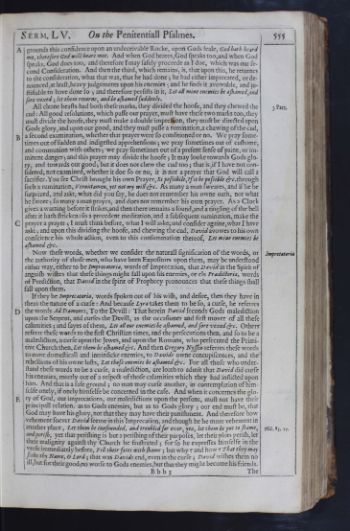 Serm. LV.
On the Penitentiall Psalmes.
555
grounds this confidence upon an undeceivable Rocke, upon Gods seale, God hath heard
Serm. LV.
On the Penitentiall Psalmes.
555
grounds this confidence upon an undeceivable Rocke, upon Gods seale, God hath heard
me, therefore God will heare mee. And when God heares, God speaks too, and when God
speaks, God does too, and therefore I may safely proceede as I doe, which was our se-
cond Consideration. And then the third, which remains, is, that upon this, he returnes
to the consideration, what that was, that he had done; he had either imprecated, or de-
nounced, at least, heavy judgements upon his enemies; and he finds it avowable, and ju-
stifiable to have done so; and therefore persists in it, Let all mine enemies be ashamed, and
sore vexed; let them returne, and be ashamed suddenly.
All cleane beasts had both these marks, they divided the hoofe, 3 Part. and they chewed the
cud: All good resolutions, which passe our prayer, must have these two marks too, they
must divide the hoofe, they must make a double impression, they must be directed upon
Gods glory, and upon our good, and they must passe a rumination, a chawing of the cud,
a second examination, whether that prayer were so conditioned or no. We pray some-
times out of sudden and indigested apprehensions; we pray sometimes out of custome,
and communion with others; we pray sometimes out of a present sense of paine, or im-
minent danger; and this prayer may divide the hoofe; It may looke towards Gods glo-
ry, and towards our good; but it does not chew the cud too; that is, if I have not con-
sidered, not examined, whether it doe so or no, it is not a prayer that God will call a
sacrifice. You see Christ brought his own Prayer, Si possibile, If it be possible &c. through
such a rumination, Veruntamen, yet not my will &c. As many a man sweares, and if he be
surprized, and askt, what did you say, he does not remember his owne oath, not what
he swore; so many a man prayes, and does not remember his own prayer. As a Clock
gives a warning before it strikes, and then there remains a sound, and a tingling of the bell
after it hath stricken: so a precedent meditation, and a subsequent rumination, make the
prayer a prayer; I must think before, what I will aske, and consider againe, what I have
askt; and upon this dividing the hoofe, and chewing the cud, David avowes to his own
conscience his whole action, even to this consummation thereof, Let mine enemies be
ashamed &c.
Now these words, whether we consider the naturall signification of the words, Imprecatoria or
the authority of those men, who have been Expositors upon them, may be understood
either way, either to be Imprecatoria, words of Imprecation, that David in the Spirit of
anguish wishes that these things might fall upon his enemies, or els Prædictoria, words
of Prediction, that David in the spirit of Prophecy pronounces that these things shall
fall upon them.
If they be Imprecatoria, words spoken out of his wish, and desire, then they have in
them the nature of a curse: And because Lyra takes them to be so, a curse, he referres
the words Ad Dæmones, To the Devill: That herein David seconds Gods malediction
upon the Serpent, and curses the Devill, as the occasioner and first mover of all these
calamities; and sayes of them, Let all our enemies be ashamed, and sore vexed &c. Others
referre these words to the first Christian times, and the persecutions then, and so to be a
malediction, a curse upon the Jewes, and upon the Romans, who persecuted the Primi-
tive Church then, Let them be ashamed &c. And then Gregory Nyssen referres these words
to more domesticall and intrinsicke enemies, to Davids owne concupiscences, and the
rebellions of his owne lusts, Let those enemies be ashamed &c. For all those who under-
stand these words to be a curse, a malediction, are loath to admit that David did curse
his enemies, meerly out of a respect of those calamities which they had inflicted upon
him. And that is a safe ground; no man may curse another, in contemplation of him-
selfe onely, if onely himselfe be concerned in the case. And when it concernes the glo-
ry of God, our imprecations, our maledictions upon the persons, must not have their
principall relation, as to Gods enemies, but as to Gods glory; our end must be, that
God may have his glory, not that they may have their punishment. And therefore how
vehement soever David seeme in this Imprecation, and though he be more vehement in
another place, Let them be confounded, and troubled for ever, yea, let them be put to shame, Psal. 83.17.
and perish, yet that perishing is but a perishing of their purposes, let their plots perish, let
their malignity against thy Church be frustrated; for so he expresses himselfe in the
verse immediately before, Fill their faces with shame; but why? and how? That they may
seeke thy Name, O Lord; that was Davids end, even in the curse; David wishes them no
ill, but for their good; no worse to Gods enemies, but that they might become his friends. Bbb3 The
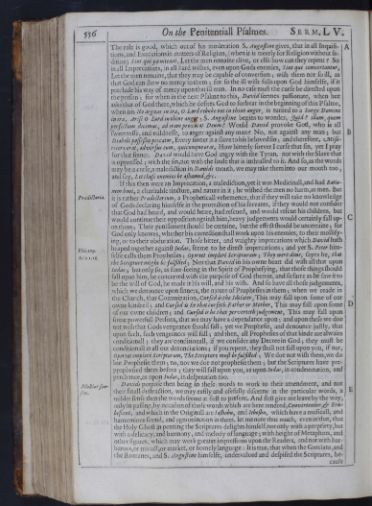 556
On the Penitentiall Psalmes.
Serm. LV.
The rule is good, which out of his moderation S. Augustine gives, that in all Inquisi-
556
On the Penitentiall Psalmes.
Serm. LV.
The rule is good, which out of his moderation S. Augustine gives, that in all Inquisi-tions, and Executions in matters of Religion, (when it is meerly for Religion without se-
dition) Sint qui pœniteant, Let the men remaine alive, or else how can they repent? So
in all Imprecations, in all hard wishes, even upon Gods enemies, Sint qui convertantur,
Let the men remaine, that they may be capable of conversion; wish them not so ill, as
that God can shew no mercy to them; for so the ill wish falls upon God himselfe, if it
preclude his way of mercy upon that ill man. In no case must the curse be directed upon
the person; for when in the next Psalme to this, David seemes passionate, when hee
asks that of God there, which he desires God to forbear in the beginning of this Psalme,
when his Ne arguas in ira, O Lord rebuke not in thine anger, is turned to a Surge Domine
in ira, Arise O Lord in thine anger; S. Augustine begins to wonder, Quid? illum, quem
perfectum dicimus, ad iram provocat Deum? Would David provoke God, who is all
sweetnesse, and mildnesse, to anger against any man? No, not against any man; but
Diaboli possessio peccator, Every sinner is a slave to his beloved sin; and therefore, Mise-
ricors orat, adversus eum, quicunque orat, How bitterly soever I curse that sin, yet I pray
for that sinner. David would have God angry with the Tyran, not with the Slave that
is oppressed; with the sin, not with the soule that is inthralled to it. And so, as the words
may be a curse, a malediction in Davids mouth, we may take them into our mouth too,
and say, Let those enemies be ashamed, &c.
If this then were an Imprecation, a malediction, yet it was Medicinall, and had Ratio-
nem boni, a charitable tincture, and nature in it; he wished the men no harm, as men. But
it is rather Prædictorium, Prædictoria. a Propheticall vehemence, that if they will take no knowledge
of Gods declaring himselfe in the protection of his servants, if they would not consider
that God had heard, and would heare, had rescued, and would rescue his children, but
would continue their opposition against him, heavy judgements would certainly fall up-
on them; Their punishment should be certaine, but the effect should be uncertaine; for
God only knowes, whether his correction shall work upon his enemies, to their mollify-
ing, or to their obduration. Those bitter, and waighty imprecations which David hath
heaped together against Iudas, Psal.109.
Acts 1.16. seeme to be direct imprecations; and yet S. Peter him-
selfe calls them Prophesies; Oportet impleri Scripturam; They were done, sayes he, that
the Scripture might be fulfilled; Not that David in his owne heart did wish all that upon
Iudas; but only so, as fore-seeing in the Spirit of Prophesying, that those things should
fall upon him, he concurred with the purpose of God therein, and so farre as he saw it to
be the will of God, he made it his will, and his wish. And so have all those judgements,
which we denounce upon sinners, the nature of Prophesies in them; when we reade in
the Church, that Commination, Cursed is the Idolater, This may fall upon some of our
owne kindred; and Cursed is he that curseth Father or Mother, This may fall upon some
of our owne children; and Cursed is he that perverteth judgement, This may fall upon
some powerfull Persons, that we may have a dependance upon; and upon these we doe
not wish that Gods vengeance should fall; yet we Prophesie, and denounce justly, that
upon such, such vengeances will fall; and then, all Prophesies of that kinde are alwaies
conditionall; they are conditionall, if we consider any Decree in God; they must be
conditionall in all our denunciations; if you repent, they shall not fall upon you, if not,
Oportet impleri Scripturam, The Scripture must be fulfilled; We doe not wish them, we do
but Prophesie them; no, nor we doe not prophesie them; but the Scriptures have pre-
prophesied them before; they will fall upon you, as upon Iudas, in condemnation, and
perchance, as upon Iudas, in desperation too.
Davids purpose then being in these words to work to their amendment, Mollior sen-
sus. and not
their finall destruction, we may easily and usefully discerne in the particular words, a
milder sense then the words seeme at first to present. And first give me leave by the way,
only in passing, by occasion of those words which are here rendred, Convertentur, & Eru-
bescent, and which in the Originall are Iashabu, and Ieboshu, which have a musicall, and
harmonious sound, and agnomination in them, let me note thus much, even in that, that
the Holy Ghost in penning the Scriptures delights himself, not only with a propriety, but
with a delicacy, and harmony, and melody of language; with height of Metaphors, and
other figures, which may work greater impressions upon the Readers, and not with bar-
barous, or triviall, or market, or homely language: It is true, that when the Grecians, and
the Romanes, and S. Augustine himselfe, undervalued and despised the Scriptures, be cause
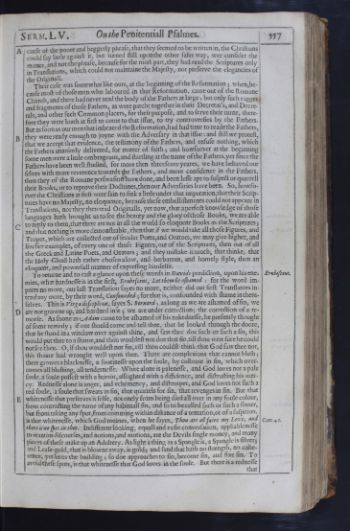 Serm. LV.
On the Penitentiall Psalmes.
557
cause of the poore and beggerly phrase, that they seemed to be written in, the Christians
Serm. LV.
On the Penitentiall Psalmes.
557
cause of the poore and beggerly phrase, that they seemed to be written in, the Christians
could say little against it, but turned still upon the other safer way, wee consider the
matter, and not the phrase, because for the most part, they had read the Scriptures only
in Translations, which could not maintaine the Majesty, nor preserve the elegancies of
the Originall.
Their case was somewhat like ours, at the beginning of the Reformation; when, be-
cause most of those men who laboured in that Reformation, came out of the Romane
Church, and there had never read the body of the Fathers at large; but only such ragges
and fragments of those Fathers, as were patcht together in their Decretat's, and Decre-
tals, and other such Common placers, for their purpose, and to serve their turne, there-
fore they were loath at first to come to that issue, to try controversies by the Fathers.
But as soon as our men that imbraced the Reformation, had had time to reade the Fathers,
they were ready enough to joyne with the Adversary in that issue: and still we protest,
that we accept that evidence, the testimony of the Fathers, and refuse nothing, which
the Fathers unanimly delivered, for matter of faith; and howsoever at the beginning
some men were a little ombrageous, and startling at the name of the Fathers, yet since the
Fathers have been well studied, for more then threescore yeares, we have behaved our
selves with more reverence towards the Fathers, and more confidence in the Fathers,
then they of the Romane perswasion have done, and been lesse apt to suspect or quarrell
their Books, or to reprove their Doctrines, then our Adversaries have been. So, howso-
ever the Christians at first were fain to sink a little under that imputation, that their Scrip-
tures have no Majesty, no eloquence, because these embellishments could not appeare in
Translations, nor they then read Originalls, yet now, that a perfect knowledge of those
languages hath brought us to see the beauty and the glory of those Books, we are able
to reply to them, that there are not in all the world so eloquent Books as the Scriptures;
and that nothing is more demonstrable, then that if we would take all those Figures, and
Tropes, which are collected out of secular Poets, and Orators, we may give higher, and
livelier examples, of every one of those Figures, out of the Scriptures, then out of all
the Greek and Latine Poets, and Orators; and they mistake it much, that thinke, that
the Holy Ghost hath rather chosen a low, and barbarous, and homely style, then an
eloquent, and powerfull manner of expressing himselfe.
To returne and to cast a glance upon these words in Davids prediction, Erubescent. upon his ene-
mies, what hardnesse is in the first, Erubescent, Let them be ashamed: for the word im-
ports no more, our last Translation sayes no more, neither did our first Translators in-
tend any more, by their word, Confounded; for that is, confounded with shame in them-
selves. This is Virga disciplinæ, sayes S. Bernard; as long as we are ashamed of sin, we
are not growne up, and hardned in it; we are under correction; the correction of a re-
morse. As soone as Adam came to be ashamed of his nakednesse, he presently thought
of some remedy; if one should come and tell thee, that he looked through the doore,
that he stood in a window over against thine, and saw thee doe such or such a sin, this
would put thee to a shame, and thou wouldest not doe that sin, till thou wert sure he could
not see thee. O, if thou wouldest not sin, till thou couldst think that God saw thee not,
this shame had wrought well upon thee. There are complexions that cannot blush;
there growes a blacknesse, a sootinesse upon the soule, by custome in sin, which over-
comes all blushing, all tendernesse. White alone is palenesse, and God loves not a pale
soule, a soule possest with a horror, affrighted with a diffidence, and distrusting his mer-
cy. Rednesse alone is anger, and vehemency, and distemper, and God loves not such a
red soule, a soule that sweats in sin, that quarrels for sin, that revenges in sin. But that
whitenesse that preserves it selfe, not onely from being died all over in any foule colour,
from contracting the name of any habituall sin, and so to be called such or such a sinner,
but from taking any spot, from comming within distance of a tentation, or of a suspition,
is that whitenesse, which God meanes, when he sayes, Thou art all faire my Love,Cant. 4.7. and
there is no spot in thee. Indifferent looking, equall and easie conversation, appliablenesse
to wanton discourses, and notions, and motions, are the Devils single money, and many
pieces of these make up an Adultery. As light a thing as a Spangle is, a Spangle is silver;
and Leafe-gold, that is blowne away, is gold; and sand that hath no strength, no cohe-
rence, yet knits the building; so doe approaches to sin, become sin, and fixe sin. To
avoid these spots, is that whitenesse that God loves in the soule. But there is a rednesse that
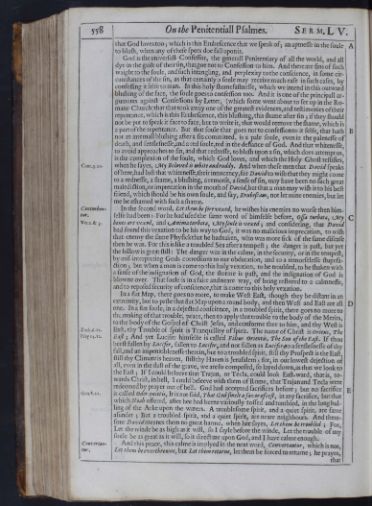 558
On the Penitentiall Psalmes.
Serm. LV.
that God loves too; which is this Erubescence that we speak of; an aptnesse in the soule
558
On the Penitentiall Psalmes.
Serm. LV.
that God loves too; which is this Erubescence that we speak of; an aptnesse in the soule
to blush, when any of these spots doe fall upon it.
God is the universall Confessor, the generall Penitentiary of all the world, and all
dye in the guilt of their sin, that goe not to Confession to him. And there are sins of such
waight to the soule, and such intangling, and perplexity to the conscience, in some cir-
cumstances of the sin, as that certainly a soule may receive much ease in such cases, by
confessing it selfe to man. In this holy shamefastnesse, which we intend in this outward
blushing of the face, the soule goes to confession too. And it is one of the principall ar-
guments against Confessions by Letter, (which some went about to set up in the Ro-
mane Church) that that took away one of the greatest evidences, and testimonies of their
repentance, which is this Erubescence, this blushing, this shame after sin; if they should
not be put to speak it face to face, but to write it, that would remove the shame, which is
a part of the repentance. But that soule that goes not to confession to it selfe, that hath
not an internall blushing after a sin committed, is a pale soule, even in the palenesse of
death, and senslesnesse, and a red soule, red in the defiance of God. And that whitenesse,
to avoid approaches to sin, and that rednesse, to blush upon a sin, which does attempt us,
is the complexion of the soule, which God loves, and which the Holy Ghost testifies,
when he sayes, Cant. 5.10. My Beloved is white and ruddy. And when these men that David speaks
of here, had lost that whitenesse, their innocency, for David to wish that they might come
to a rednesse, a shame, a blushing, a remorse, a sense of sin, may have been no such great
malediction, or imprecation in the mouth of David, but that a man may wish it to his best
friend, which should be his own soule, and say, Erubescam, not let mine enemies, but let
me be ashamed with such a shame.
In the second word, Conturben-
tur. Let them be sore vexed, he wishes his enemies no worse then him-
selfe had been: For he had used the same word of himselfe before, Ossa turbata, My
bones are vexed, Ver. 2. & 3. and Anima turbata, My soule is vexed; and considering, that David
had found this vexation to be his way to God, it was no malicious imprecation, to wish
that enemy the same Physick that he had taken, who was more sick of the same disease
then he was. For this is like a troubled Sea after a tempest; the danger is past, but yet
the billow is great still: The danger was in the calme, in the security, or in the tempest,
by mis-interpreting Gods corrections to our obduration, and to a remorselesse stupefa-
ction; but when a man is come to this holy vexation, to be troubled, to be shaken with
a sense of the indignation of God, the storme is past, and the indignation of God is
blowne over. That soule is in a faire and neare way, of being restored to a calmnesse,
and to reposed security of conscience, that is come to this holy vexation.
In a flat Map, there goes no more, to make West East, though they be distant in an
extremity, but to paste that flat Map upon a round body, and then West and East are all
one. In a flat soule, in a dejected conscience, in a troubled spirit, there goes no more to
the making of that trouble, peace, then to apply that trouble to the body of the Merits,
to the body of the Gospel of Christ Jesus, and conforme thee to him, and thy West is
East, Zach. 6.12. thy Trouble of spirit is Tranquillity of spirit. The name of Christ is Oriens, The
East;Esay 14.12. And yet Lucifer himselfe is called Filius Orientis, The Son of the East. If thou
beest fallen by Lucifer, fallen to Lucifer, and not fallen as Lucifer, to a senslesnesse of thy
fall, and an impenitiblenesse therein, but to a troubled spirit, still thy Prospect is the East,
still thy Climate is heaven, still thy Haven is Jerusalem; for, in our lowest dejection of
all, even in the dust of the grave, we are so composed, so layed down, as that we look to
the East; If I could beleeve that Trajan, or Tecla, could look East-ward, that is, to-
wards Christ, in hell, I could beleeve with them of Rome, that Trajan and Tecla were
redeemed by prayer out of hell. God had accepted sacrifices before; but no sacrifice
is called Odor quietis, Gen. 8.21. It is not said, That God smelt a savor of rest, in any sacrifice, but that
which Noah offered, after hee had beene variously tossed and tumbled, in the long hul-
ling of the Arke upon the waters. A troublesome spirit, and a quiet spirit, are farre
asunder; But a troubled spirit, and a quiet spirit, are neare neighbours. And there-
fore David meanes them no great harme, when hee sayes, Let them be troubled; For,
Let the winde be as high as it will, so I sayle before the winde, Let the trouble of my
soule be as great as it will, so it direct me upon God, and I have calme enough.
And this peace, Convertan-
tur. this calme is implyed in the next word, Convertantur, which is not,
Let them be overthrowne, but Let them returne, let them be forced to returne; he prayes, that
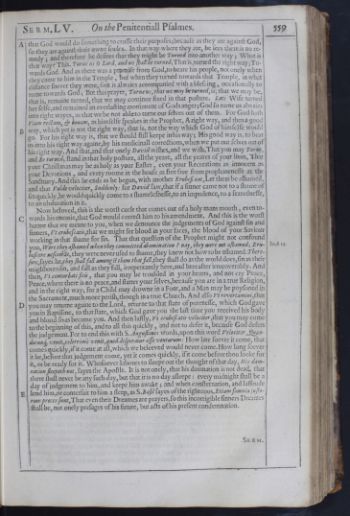 Serm. LV.
On the Penitentiall Psalmes.
559
that God would do something to crosse their purposes; because as they are against God,
Serm. LV.
On the Penitentiall Psalmes.
559
that God would do something to crosse their purposes; because as they are against God,
so they are against their owne soules. In that way where they are, he sees there is no re-
medy; and therefore he desires that they might be Turned into another way; What is
that way? This. Turne us O Lord, and we shall be turned; That is, turned the right way; To-
wards God. And as there was a promise from God, to heare his people, not onely when
they came to him in the Temple, but when they turned towards that Temple, in what
distance soever they were, so it is alwaies accompanied with a blessing, occasionally to
turne towards God; But this prayer, Turne us, that we may be turned, is, that we may be,
that is, remaine turned, that we may continue fixed in that posture. Lots Wife turned
her selfe, and remained an everlasting monument of Gods anger; God so turne us alwaies
into right wayes, as that we be not able to turne our selves out of them. For God hath
Viam rectam, & bonam, as himselfe speakes in the Prophet, A right way, and then a good
way, which yet is not the right way, that is, not the way which God of himselfe would
go. For his right way is, that we should still keepe in his way; His good way is, to beat
us into his right way againe, by his medicinall corrections, when we put our selves out of
his right way. And that, and that onely David wishes, and we wish, That you may Turne,
and Be turned; stand in that holy posture, all the yeare, all the yeares of your lives, That
your Christmas may be as holy as your Easter, even your Recreations as innocent as
your Devotions, and every roome in the house as free free from prophanenesse as the
Sanctuary. And this he ends as he begun, with another Erubescant, Let them be ashamed,
and that Valde velociter, Suddenly: for David saw, that if a sinner came not to a shame of
sin quickly, he would quickly come to a shamelesnesse, to an impudence, to a searednesse,
to an obduration in it.
Now beloved, this is the worst curse that comes out of a holy mans mouth, even to-
wards his enemie, that God would correct him to his amendment. And this is the worst
harme that we meane to you, when we denounce the judgements of God against sin and
sinners, Vt erubescatis, that we might see blood in your faces, the blood of your Saviour
working in that shame for sin. That that question of the Prophet might not confound
you, Were they ashamed when they committed abomination? nay, they were not ashamed; Ier. 6.15. Eru-
bescere nesciebāt, they were never used to shame, they knew not how to be ashamed. There-
fore, sayes he, they shall fall amongst them that fall, they shall do as the world does, sin as their
neighbours sin, and fall as they fall, irrepentantly here, and hereafter irrecoverably. And
then, Vt conturbati sitis, that you may be troubled in your hearts, and not cry Peace,
Peace, where there is no peace, and flatter your selves, because you are in a true Religion,
and in the right way; for a Child may drowne in a Font, and a Man may be poysoned in
the Sacrament, much more perish, though in a true Church. And also Vt revertamini, that
you may returne againe to the Lord, returne to that state of purenesse, which God gave
you in Baptisme, to that state, which God gave you the last time you received his body
and blood so as became you. And then lastly, Vt erubescatis velociter, that you may come
to the beginning of this, and to all this quickly, and not to defer it, because God defers
the judgement. For to end this with S. Augustines words, upon this word Velociter, Quan-
docunQuan-
docunque venit, celerrimè venit, quod desperatur esse venturum: How late soever it come, that
comes quickly, if it come at all, which we beleeved would never come. How long soever
it be, before that judgement come, yet it comes quickly, if it come before thou looke for
it, or be ready for it. Whosoever labours to sleepe out the thought of that day, His dam-
nation sleepeth not, sayes the Apostle. It is not onely, that his damnation is not dead, that
there shall never be any such day, but that it is no day asleepe: every midnight shall be a
day of judgement to him, and keepe him awake; and when consternation, and lassitude
lend him, or conterfait to him a sleep, as S. Basil sayes of the righteous, Etiam somnia justo-
rum preces sunt, That even their Dreames are prayers, so this incorrigible sinners Dreames
shall be, not onely presages of his future, but acts of his present condemnation. Serm.
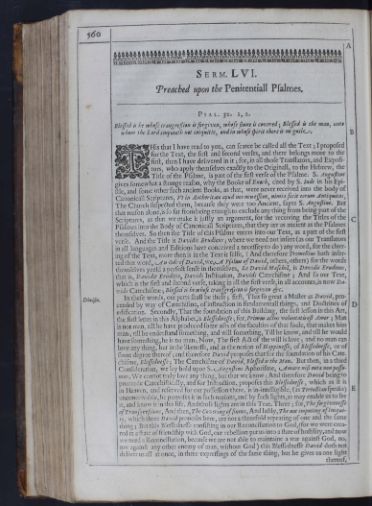
Serm. LVI.
Preached upon the Penitentiall Psalmes.
Psal. 32.1, 2.
Blessed is he whose trangression is forgiven, whose sinne is covered; Blessed is the man, unto
whom the Lord imputeth not iniquitie, and in whose spirit there is no guile.
THisThis that I have read to you, can scarce be called all the Text; I proposed
for the Text, the first and second verses, and there belongs more to the
first, then I have delivered in it; for, in all those Translators, and Exposi-
tors, who apply themselves exactly to the Originall, to the Hebrew, the
Title of the Psalme, is part of the first verse of the Psalme. S. Augustine
gives somewhat a strange reason, why the Booke of Enoch, cited by S. Iude in his Epi-
stle, and some other such ancient Books, as that, were never received into the body of
Canonicall Scriptures, Vt in Authoritate apud nos non essent, nimia fecit eorum Antiquitas,
The Church suspected them, because they were too Ancient, sayes S. Augustine. But
that reason alone, is so far from being enough to exclude any thing from being part of the
Scriptures, as that we make it justly an argument, for the receiving the Titles of the
Psalmes into the Body of Canonicall Scriptures, that they are as ancient as the Psalmes
themselves. So then the Title of this Psalme enters into our Text, as a part of the first
verse. And the Title is Davidis Erudiens; where we need not insert (as our Translators
in all languages and Editions have conceived a necessity to do) any word, for the cleer-
ing of the Text, more then is in the Text it selfe, (And therefore Tremellius hath inser-
ted that word, An Ode of David, we, A Psalme of David, others, others) for the words
themselves yeeld a perfect sense in themselves, Le David Maschil, is Davidis Erudiens,
that is, Davidis Eruditio, Davids Institution, Davids Catechisme; And so our Text,
which is the first and second verse, taking in all the first verse, in all accounts, is now Da-
vids Catechisme; Blessed is he whose transgression is forgiven &c.
In these words, Divisio. our parts shall be these; first, That so great a Master as David, pro-
ceeded by way of Catechisme, of instruction in fundamentall things, and Doctrines of
edification. Secondly, That the foundation of this Building, the first lesson in this Art,
the first letter in this Alphabet, is Blessednesse; for, Primus actus voluntatis est Amor; Man
is not man, till he have produced some acts of the faculties of that soule, that makes him
man; till he understand something, and will something, Till he know, and till he would
have something, he is no man; Now, The first Act of the will is love; and no man can
love any thing, but in the likenesse, and in the notion of Happinesse, of Blessednesse, or of
some degree thereof; and therefore David proposes that for the foundation of his Cate-
chisme, Blessednesse; The Catechisme of David, Blessed is the Man. But then, in a third
Consideration, we lay hold upon S. Augustins Aphorisme, Amare nisi nota non possu-
mus, We cannot truly love any thing, but that we know; And therefore David being to
proceede Catechistically, and for Instruction, proposes this Blessednesse, which as it is
in Heaven, and reserved for our possession there, is in-intelligible, (as Tertullian speaks)
unconceivable, he purposes it in such notions, and by such lights, as may enable us to see
it, and know it in this life. And those lights are in this Text, Three; for, The forgivenesse
of Transgressions, And then, The Covering of sinnes, And lastly, The not imputing of Iniqui-
ty, which three David proposes here, are not a threefold repeating of one and the same
thing; But this Blessednesse consisting in our Reconciliation to God, (for we were crea-
ted in a state of friendship with God, our rebellion put us into a state of hostility, and now
we need a Reconciliation, because we are not able to maintaine a war against God, no,
nor against any other enemy of man, without God) this Blessednesse David doth not
deliver us all at once, in three expressings of the same thing, but he gives us one light thereof,
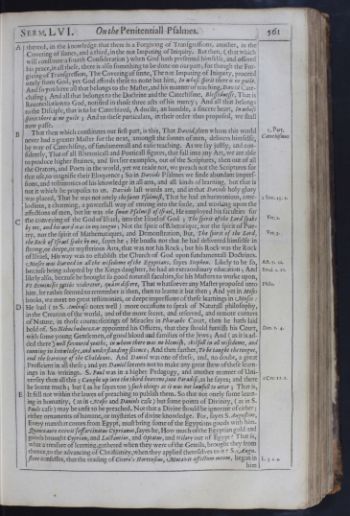 Serm. LVI.
On the Penitentiall Psalmes.
561
thereof, in the knowledge that there is a Forgiving of Transgressions, another, in the
Serm. LVI.
On the Penitentiall Psalmes.
561
thereof, in the knowledge that there is a Forgiving of Transgressions, another, in the
Covering of sinnes, and a third, in the not Imputing of Iniquity. But then, (that which
will constitute a fourth Consideration) when God hath presented himselfe, and offered
his peace, in all these, there is also something to be done on our part; for though the For-
giving of Transgression, The Covering of sinne, The not Imputing of Iniquity, proceed
onely from God, yet God affords these to none but him, In whose spirit there is no guile.
And so you have all that belongs to the Master, and his manner of teaching, David Cate-
chising; And all that belongs to the Doctrine and the Catechisme, Blessednesse, That is
Reconciliation to God, notified in those three acts of his mercy; And all that belongs
to the Disciple, that is to be Catechized, A docile, an humble, a sincere heart, In whose
spirit there is no guile; And to these particulars, in their order thus proposed, we shall
now passe.
That then which constitutes our first part, is this, That David,1. Part.
Catechismus then whom this world
never had a greater Master for the next, amongst the sonnes of men, delivers himselfe,
by way of Catechising, of fundamentall and easie teaching. As we say justly, and con-
fidently, That of all Rhetoricall and Poeticall figures, that fall into any Art, we are able
to produce higher straines, and livelier examples, out of the Scriptures, then out of all
the Orators, and Poets in the world, yet we reade not, we preach not the Scriptures for
that use, to magnifie their Eloquence; So in Davids Psalmes we finde abundant impres-
sions, and testimonies of his knowledge in all arts, and all kinds of learning, but that is
not it which he proposes to us. Davids last words are, and in that Davids holy glory
was placed, That he was not onely the sweet Psalmist, That he had an harmonious, a me-
lodious, 2 Sam. 23.1. a charming, a powerfull way of entring into the soule, and working upon the
affections of men, but he was the sweet Psalmist of Israel, He employed his faculties for
the conveying of the God of Israel, into the Israel of God;Ver. 2. The spirit of the Lord spake
by me, and his word was in my tongue; Not the spirit of Rhetorique, nor the spirit of Poe-
try, Ver. 3. nor the spirit of Mathematiques, and Demonstration, But, The spirit of the Lord,
the Rock of Israel spake by me, sayes he; He boasts not that he had delivered himselfe in
strong, or deepe, or mysterious Arts, that was not his Rock; but his Rock was the Rock
of Israel, His way was to establish the Church of God upon fundamentall Doctrines.
Moses was learned in all the wisedome of the Egyptians, sayes Stephen. Likely to be so,
Act. 7.22. because being adopted by the Kings daughter, he had an extraordinary education; And
likely also, because he brought so good naturall faculties, for his Masters to worke upon, Exod. 2.10.
Vt Reminisci potiùs videretur, quàm discere,Philo. That whatsoever any Master proposed unto
him, he rather seemed to remember it then, then to learne it but then; And yet in Moses
books, we meet no great testimonies, or deepe impressions of these learnings in Moses:
He had (as S. Ambrose notes well) more occasions to speak of Naturall philosophy,
in the Creation of the world, and of the more secret, and reserved, and remote corners
of Nature, in those counterfeitings of Miracles in Pharaohs Court, then he hath laid
hold of. So Nebuchadnezzar appointed his Officers, that they should furnish his Court,
Dan. 1.4. with some young Gentlemen, of good bloud and families of the Jews; And (as it is ad-
ded there) well favoured youths, in whom there was no blemish, skilfull in all wisedome, and
cunning in knowledge, and understanding science; And then farther, To be taught the tongue,
and the learning of the Chaldeans. And Daniel was one of these, and, no doubt, a great
Proficient in all these; and yet Daniel seemes not to make any great shew of these learn-
ings in his writings. S. Paul was in a higher Pedagogy, and another manner of Uni-
versity then all this; Caught up into the third heavens, into Paradise, as he sayes;2 Cor. 12.2. and there
he learnt much; but (as he sayes too) such things as it was not lawfull to utter; That is,
It fell not within the lawes of preaching to publish them. So that not onely some learn-
ing in humanity, (as in Moses and Daniels case) but some points of Divinity, (as in S.
Pauls case) may be unfit to be preached. Not that a Divine should be ignorant of either;
either ornaments of humane, or mysteries of divine knowledge. For, sayes S. Augustine,
Every man that comes from Egypt, must bring some of the Egyptians goods with him.
Quanto auro exivit suffarcinatus Cyprianus, sayes he, How much of the Egyptian gold and
goods brought Cyprian, and Lactantius, and Optatus, and Hilary out of Egypt? That is,
what a treasure of learning, gathered when they were of the Gentils, brought they from
thence, to the advancing of Christianity, when they applied themselves to it? S. Augu-
stine confesses, that the reading of Cicero's Hortensius, Mutavit affectum meum,L. 3. c. 4. began in him
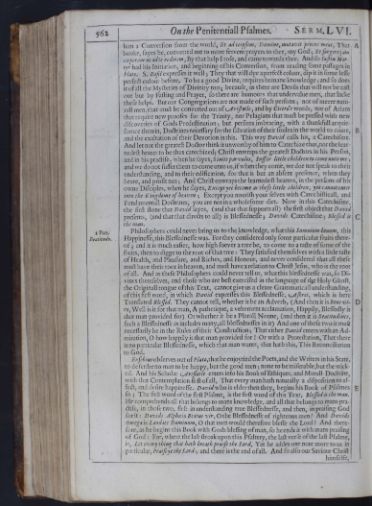 562
On the Penitentiall Psalmes.
Serm. LVI.
him a Conversion from the world, Et ad teipsum, Domine, mutavit preces meas, That
562
On the Penitentiall Psalmes.
Serm. LVI.
him a Conversion from the world, Et ad teipsum, Domine, mutavit preces meas, That
booke, sayes he, converted me to more fervent prayers to thee, my God; Et surgere jam
coeperam ut ad te redirem, By that help I rose, and came towards thee. And so Iustin Mar-
tyr had his Initiation, and beginning of his Conversion, from reading some passages in
Plato. S. Basil expresses it well; They that will dye a perfect colour, dip it in some lesse
perfect colour before. To be a good Divine, requires humane knowledge; and so does
it of all the Mysteries of Divinity too; because, as there are Devils that will not be cast
out but by Fasting and Prayer, so there are humours that undervalue men, that lacke
these helps. But our Congregations are not made of such persons; not of meere natu-
rall men, that must be converted out of Aristotle, and by Cicero's words, nor of Arians
that require new proofes for the Trinity, nor Pelagians that must be pressed with new
discoveries of Gods Predestination; but persons imbracing, with a thankfull acquie-
scence therein, Doctrines necessary for the salvation of their soules in the world to come,
and the exaltation of their Devotion in this. This way David calls his, a Catechisme.
And let not the greatest Doctor think it unworthy of him to Catechize thus, nor the lear-
nedest hearer to be thus catechized; Christ enwraps the greatest Doctors in his Person,
and in his practise, when he sayes, Sinite parvulos, Suffer little children to come unto me;
and we do not suffer them to come unto us, if when they come, we doe not speak to their
understanding, and to their edification, for that is but an absent presence, when they
heare, and profit not; And Christ enwraps the learnedest hearers, in the persons of his
owne Disciples, when he sayes, Except yee become as these little children, yee cannot enter
into the Kingdome of heaven; Except you nourish your selves with Catechisticall, and
Fundamentall Doctrines, you are not in a wholesome diet. Now in this Catechisme,
the first stone that David layes, (and that that supports all) the first object that David
presents, (and that that directs to all) is Blessednesse; Davids Catechisme; Blessed is
the man.
Philosophers could never bring us to the knowledge, 2 Part.
Beatitudo. what this Summum bonum, this
Happinesse, this Blessednesse was. For they considered only some particular fruits there-
of; and it is much easier, how high soever a tree be, to come to a taste of some of the
fruits, then to digge to the root of that tree: They satisfied themselves with a little taste
of Health, and Pleasure, and Riches, and Honour, and never considered that all these
must have their root in heaven, and must have a relation to Christ Jesus, who is the root
of all. And as these Philosophers could never tell us, what this blessednesse was, so Di-
vines themselves, and those who are best exercised in the language of the Holy Ghost,
the Originall tongue of this Text, cannot give us a cleare Grammaticall understanding,
of this first word, in which David expresses this Blessednesse, Ashrei, which is here
Translated Blessed. They cannot tell, whether it be an Adverb, (And then it is Bene vi-
ro, Well is it for that man, A pathetique, a vehement acclamation, Happily, Blessedly is
that man provided for) Or whether it be a Plurall Noune, (and then it is Beatitudines,
such a Blessednesse as includes many, all blessednesses in it) And one of these two it must
necessarily be in the Rules of their Construction; That either David enters with an Ad-
miration, O how happily is that man provided for! Or with a Protestation, That there
is no particular Blessednesse, which that man wants, that hath this, This Reconciliation
to God.
Eusebius observes out of Plato, that he enjoyned the Poets, and the Writers in his State,
to describe no man to be happy, but the good men; none to be miserable, but the wick-
ed. And his Scholar Aristotle enters into his Book of Ethiques, and Morall Doctrine,
with that Contemplation first of all, That every man hath naturally a disposition to af-
fect, and desire happinesse. David who is elder then they, begins his Book of Psalmes
so; The first word of the first Psalme, is the first word of this Text, Blessed is the man.
He comprehends all that belongs to mans knowledge, and all that belongs to mans pra-
ctise, in those two, first in understanding true Blessednesse, and then, in praising God
for it: Davids Alpha is Beatus vir, O the Blessednesse of righteous men! And Davids
Omega is Laudate Dominum, O that men would therefore blesse the Lord! And there-
fore, as he begins this Book with Gods blessing of man, so he ends it with mans praising
of God: For, where the last stroak upon this Psaltery, the last verse of the last Psalme,
is, Let every thing that hath breath praise the Lord, Yet he addes one note more to us in
particular, Praise ye the Lord; and there is the end of all. And so also our Saviour Christ himselfe,
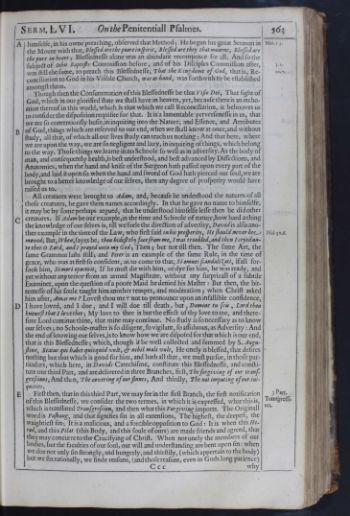 Serm. LVI.
On the Penitentiall Psalmes.
563
himselfe, in his owne preaching, observed that Method;Mat. 5.3. He begun his great Sermon in
Serm. LVI.
On the Penitentiall Psalmes.
563
himselfe, in his owne preaching, observed that Method;Mat. 5.3. He begun his great Sermon in
the Mount with that, Blessed are the poore inspirit, Blessed are they that mourne, Blessed are
the pure in heart; Blessednesse alone was an abundant recompence for all. And so the
subject of Iohn Baptists Commission before, and of his Disciples Commission after, 3.2.
was still the same, to preach this Blessednesse, That the Kingdome of God, that is, 10.7. Re-
conciliation to God in his Visible Church, was at hand, was forthwith to be established
amongst them.
Though then the Consummation of this Blessednesse be that Visio Dei, That sight of
God, which in our glorified state we shall have in heaven, yet, because there is an incho-
ation thereof in this world, which is that which we call Reconciliation, it behooves us
to consider the disposition requisite for that. It is a lamentable perversenesse in us, that
we are so contentiously busie, in inquiring into the Nature, and Essence, and Attributes
of God, things which are reserved to our end, when we shall know at once, and without
study, all that, of which all our lives study can teach us nothing; And that here, where
we are upon the way, we are so negligent and lazy, in inquiring of things, which belong
to the way. Those things we learne in no Schoole so well as in adversity. As the body of
man, and consequently health, is best understood, and best advanced by Dissections, and
Anatomies, when the hand and knife of the Surgeon hath passed upon every part of the
body, and laid it open: so when the hand and sword of God hath pierced our soul, we are
brought to a better knowledge of our selves, then any degree of prosperity would have
raised us to.
All creatures were brought to Adam, and, because he understood the natures of all
those creatures, he gave them names accordingly. In that he gave no name to himselfe,
it may be by some perhaps argued, that he understood himselfe lesse then he did other
creatures. If Adam be our example, in the time and Schoole of nature, how hard a thing
the knowledge of our selves is, till we feele the direction of adversity, David is also ano-
ther example in the time of the Law, who first said in his prosperity,Psal. 30.6. He should never bee
moved; But, When, sayes he, Thou hidest thy face from me, I was troubled, and then I cryed un-
to thee O Lord, and I prayed unto my God; Then; but not till then. The same Art, the
same Grammar lasts still; and Peter is an example of the same Rule, in the time of
grace, who was at first so confident, as to come to that, Si omnes scandalizati, if all for-
sook him, Si mori oportuit, If he must die with him, or dye for him, he was ready, and
yet without any terror from an armed Magistrate, without any surprizall of a subtile
Examiner, upon the question of a poore Maid he denied his Master: But then, the bit-
ternesse of his soule taught him another temper, and moderation; when Christ asked
him after, Amas me? Lovest thou me? not to pronounce upon an infallible confidence,
I have loved, and I doe, and I will doe till death, but, Domine tu scis, Lord thou
knowest that I love thee; My love to thee is but the effect of thy love to me, and there-
fore Lord continue thine, that mine may continue. No study is so necessary as to know
our selves; no Schoole-master is so diligent, so vigilant, so assiduous, as Adversity: And
the end of knowing our selves, is to know how we are disposed for that which is our end,
that is this Blessednesse; which, though it be well collected and summed by S. Augu-
stine, Beatus qui habet quicquid vult, & nihil mali vult, He onely is blessed, that desires
nothing but that which is good for him, and hath all that, we must pursue, in those par-
ticulars, which here, in Davids Catechisme, constitute this Blessednesse, and consti-
tute our third Part, and are delivered in three Branches, first, The forgiving of our trans-
gressions, And then, The covering of our sinnes, And thirdly, The not imputing of our ini-
quities.
First then, that in this third Part, we may see in the first Branch, 3 Part.
Transgressi-
on. the first notification
of this Blessednesse, we consider the two termes, in which it is expressed, what this is,
which is translated Transgression, and then what this Forgiving imports. The Originall
word is Pashang, and that signifies sin in all extensions, The highest, the deepest, the
waightiest sin; It is a malicious, and a forcible opposition to God: It is when this He-
rod, and this Pilat (this Body, and this soule of ours) are made friends and agreed, that
they may concurre to the Crucifying of Christ. When not onely the members of our
bodies, but the faculties of our soul, our will and understanding are bent upon sin: when
we doe not only sin strongly, and hungerly, and thirstily, (which appertain to the body)
but we sin rationally, we finde reasons, (and those reasons, even in Gods long patience) Ccc why
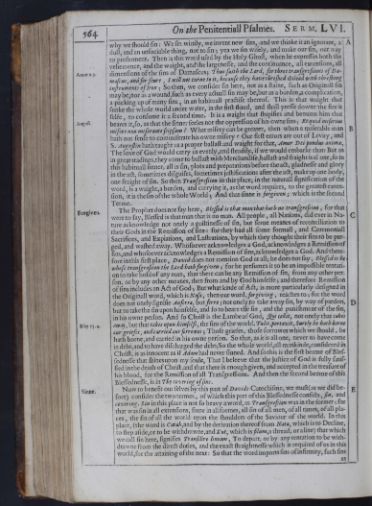 564
On the Penitentiall Psalmes.
Serm. LVI.
why we should sin: We sin wittily, we invent new sins, and we thinke it an ignorant, a
564
On the Penitentiall Psalmes.
Serm. LVI.
why we should sin: We sin wittily, we invent new sins, and we thinke it an ignorant, a
dull, and an unsociable thing, not to sin; yea we sin wisely, and make our sin, our way
to preferment. Then is this word used by the Holy Ghost, when he expresses both the
vehemence, and the waight, and the largenesse, and the continuance, all extensions, all
dimensions of the sins of Damascus;Amos 1.3. Thus saith the Lord, for three transgressions of Da-
mascus, and for foure, I will not turne to it, because they have threshed Gilead with threshing
instruments of Iron; So then, we consider sin here, not as a staine, such as Originall sin
may be, nor as a wound, such as every actuall sin may be, but as a burden, a complication,
a packing up of many sins, in an habituall practise thereof. This is that waight that
sunke the whole world under water, in the first floud, and shall presse downe the fire it
selfe, to consume it a second time. It is a waight that stupifies and benums him that
beares it, August. so, as that the sinner feeles not the oppression of his owne sins; Et quid miserius
miscro non miserante seipsum? What misery can be greater, then when a miserable man
hath not sense to commiserate his owne misery? Our first errors are out of Levity, and
S. Augustin hath taught us a proper ballast and waight for that, Amor Dei pondus animæ,
The love of God would carry us evenly, and steadily, if we would embarke that: But as
in great tradings, they come to ballast with Merchandise, ballast and fraight is al one, so in
this habituall sinner, all is sin, plots and preparations before the act, gladnesse and glory
in the act, sometimes disguises, sometimes justifications after the act, make up one body,
one fraight of sin. So then Transgression in this place, in the naturall signification of the
word, is a waight, a burden, and carrying it, as the word requires, to the greatest exten-
sion, it is the sin of the whole World; And that sinne is forgiven; which is the second
Terme.
The Prophet does not say here, Forgiven. Blessed is that man that hath no transgression, for that
were to say, Blessed is that man that is no man. All people, all Nations, did ever in Na-
ture acknowledge not onely a guiltinesse of sin, but some meanes of reconciliation to
their Gods in the Remission of sins: for they had all some formall, and Ceremoniall
Sacrifices, and Expiations, and Lustrations, by which they thought their sins to be pur-
ged, and washed away. Whosoever acknowledges a God, acknowledges a Remission of
sins, and whosoever acknowledges a Remission of sins, acknowledges a God. And there-
fore in this first place, David does not mention God at all; he does not say, Blessed is he
whose transgression the Lord hath forgiven; for he presumes it to be an impossible tentati-
on to take hold of any man, that there can be any Remission of sin, from any other per-
son, or by any other meanes, then from and by God himselfe; and therefore Remission
of sins includes an Act of God; But what kinde of Act, is more particularly designed in
the Originall word, which is Nasa, then our word, forgiving, reaches to; for the word
does not onely signifie Auferre, but ferre; not onely to take away sin, by way of pardon,
but to take the sin upon himselfe, and so to beare the sin, and the punishment of the sin,
in his owne person. And so Christ is the Lambe of God, Qui tollit, not onely that takes
away,Esay 53.4. but that takes upon himselfe, the sins of the world. Tulit, portavit, Surely he hath borne
our griefes, and carried our sorrowes; Those griefes, those sorrowes which we should, he
hath borne, and carried in his owne person. So that, as it is all one, never to have come
in debt, and to have discharged the debt; So the whole world, all mankinde, considered in
Christ, is as innocent as if Adam had never sinned. And so this is the first beame of Bles-
sednesse that shines upon my soule, That I beleeve that the justice of God is fully satis-
fied in the death of Christ, and that there is enough given, and accepted in the treasure of
his blood, for the Remission of all Transgressions. And then the second beame of this
Blessednesse, is in The covering of sins.
Now to benefit our selves by this part of Davids Catechisme, Sinne. we must (as we did be-
fore) consider the two termes, of which this part of this Blessednesse consists, sin, and
covering. Sin in this place is not so heavy a word, as Transgression was in the former; for
that was sin in all extensions, sinne in all formes, all sin of all men, of all times, of all pla-
ces, the sin of all the world upon the shoulders of the Saviour of the world. In this
place, (the word is Catah, and by the derivation thereof from Nata, which is to Decline,
to step aside, or to be withdrawne, and Kut, which is filum, a thread, or a line) that which
we call sin here, signifies Transilire lineam, To depart, or by any tentation to be with-
drawne from the direct duties, and the exact straightnesse which is required of us in this
world, for the attaining of the next: So that the word imports sins of infirmity, such sins as
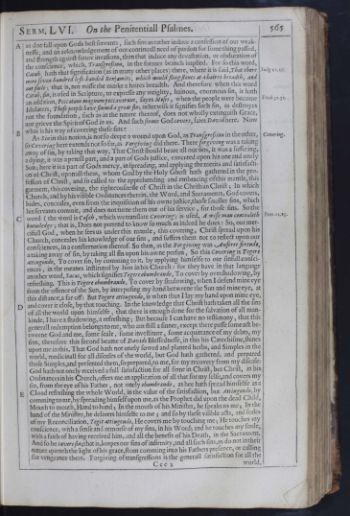 Serm. LVI.
On the Penitentiall Psalmes.
565
as doe fall upon Gods best servants, such sins as rather induce a cofession of our weak-
Serm. LVI.
On the Penitentiall Psalmes.
565
as doe fall upon Gods best servants, such sins as rather induce a cofession of our weak-nesse, and an acknowledgement of our continuall need of pardon for some thing passed,
and strength against future invasions, then that induce any devastation, or obduration of
the conscience, which, Transgression, in the former branch implied. For so this word,
Catah, hath that signification (as in many other places) there, where it is said, Iudg 20.16. That there
were seven hundred left-handed Benjamits, which would sling stones at a haires breadth, and
not faile; that is, not misse the marke a haires breadth. And therefore when this word
Catah, sin, is used in Scripture, to expresse any weighty, hainous, enormous sin, it hath
an addition, Peccatum magnum peccaverunt, sayes Moses,Exod. 32.31. when the people were become
Idolaters, These people have sinned a great sin; otherwise it signifies such sin, as destroyes
not the foundation, such as in the nature thereof, does not wholly extinguish Grace,
nor grieve the Spirit of God in us. And such sinnes God covers, saies David here. Now
what is his way of covering these sins?
As Sin in this notion, is not so deepe a wound upon God, as Transgression in the other,
Covering. so Covering here extends not so far, as Forgiving did there. There forgiving was a taking
away of sin, by taking that way, That Christ should beare all our sins, it was a suffering,
a dying, it was a penall part, and a part of Gods justice, executed upon his one and onely
Son; here it is a part of Gods mercy, in spreading, and applying the merits and satisfacti-
on of Christ, upon all them, whom God by the Holy Ghost hath gathered in the pro-
fession of Christ, and so called to the apprehending and embracing of this mantle, this
garment, this covering, the righteousnesse of Christ in the Christian Christ; In which
Church, and by his visible Ordinances therein, the Word, and Sacraments, God covers,
hides, conceales, even from the inquisition of his owne justice, those smaller sins, which
his servants commit, and does not turne them out of his service, for those sins. So the
word (the word is Casah, which we translate Covering) is used, Prov. 12.23. A wise man concealeth
knowledge; that is, Does not pretend to know so much as indeed he does: So, our mer-
cifull God, when he sees us under this mantle, this covering, Christ spread upon his
Church, conceales his knowledge of our sins, and suffers them not to reflect upon our
consciences, in a consternation thereof. So then, as the Forgiving was Auferre ferendo,
a taking away of sin, by taking all sin upon his owne person, So this Covering is Tegere
attingendo, To cover sin, by comming to it, by applying himselfe to our sinfull consci-
ences, in the meanes instituted by him in his Church: for they have in that language
another word, Sacac, which signifies Tegere obumbrando, To cover by overshadowing, by
refreshing. This is Tegere obumbrando, To cover by shadowing, when I defend mine eye
from the offence of the Sun, by interposing my hand betweene the Sun and mine eye, at
this distance, a far off: But Tegere attingendo, is when thus I lay my hand upon mine eye,
and cover it close, by that touching. In the knowledge that Christ hath taken all the sins
of all the world upon himselfe, that there is enough done for the salvation of all man-
kinde, I have a shadowing, a refreshing; But because I can have no testimony, that this
generall redemption belongs to me, who am still a sinner, except there passe some act be-
tweene God and me, some seale, some investiture, some acquittance of my debts, my
sins, therefore this second beame of Davids Blessednesse, in this his Catechisme, shines
upon me in this, That God hath not onely sowed and planted herbs, and Simples in the
world, medicinall for all diseases of the world, but God hath gathered, and prepared
those Simples, and presented them, so prepared, to me, for my recovery from my disease:
God hath not onely received a full satisfaction for all sinne in Christ, but Christ, in his
Ordinances in his Church, offers me an application of all that for my selfe, and covers my
sin, from the eye of his Father, not onely obumbrando, as hee hath spread himselfe as a
Cloud refreshing the whole World, in the value of the satisfaction, but Attingendo, by
comming to me, by spreading himself upon me, as the Prophet did upon the dead Child,
Mouth to mouth, Hand to hand; In the mouth of his Minister, he speaks to me; In the
hand of the Minister, he delivers himselfe to me; and so by these visible acts, and seales
of my Reconciliation, Tegit attingendo, He covers me by touching me; He touches my
conscience, with a sense and remorse of my sins, in his Word; and he touches my soule,
with a faith of having received him, and all the benefit of his Death, in the Sacrament.
And so he covers sin; that is, keepes our sins of infirmity, and all such sins, as do not in their
nature quench the light of his grace, from comming into his Fathers presence, or calling
for vengeance there. Forgiving of transgressions is the generall satisfaction for all the Ccc2 world,
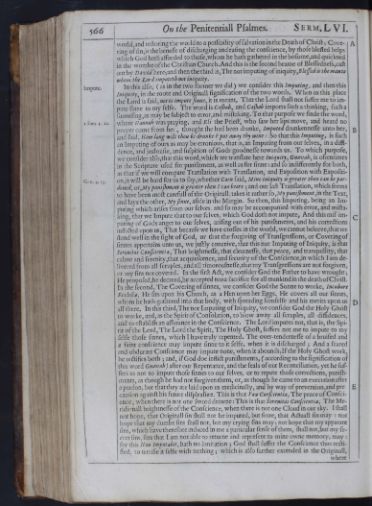 566
On the Penitentiall Psalmes.
Serm. LVI.
world, and restoring the world to a possibility of salvation in the Death of Christ; Cove-
566
On the Penitentiall Psalmes.
Serm. LVI.
world, and restoring the world to a possibility of salvation in the Death of Christ; Cove-ring of sin, is the benefit of discharging and easing the conscience, by those blessed helps
which God hath afforded to those, whom he hath gathered in the bosome, and quickned
in the wombe of the Christian Church. And this is the second beame of Blessedness, cast
out by David here; and then the third is, The not imputing of iniquity, Blessed is the man to
whom the Lord imputeth not iniquity.
In this also, Impute. (as in the two former we did) we consider this Imputing, and then this
Iniquity, in the roote and Original signification of the two words. When in this place
the Lord is said, not to impute sinne, it is meant, That the Lord shall not suffer me to im-
pute sinne to my selfe. The word is Cashab, and Cashab imports such a thinking, such a
surmising, as may be subject to error, and mistaking. To that purpose we finde the word,
where Hannah was praying, 1 Sam. 1.12. and Eli the Priest, who saw her lips move, and heard no
prayer come from her, thought she had been drunke, Imputed drunkennesse unto her,
and said, How long wilt thou be drunke? put away thy wine: So that this Imputing, is such
an Imputing of ours as may be erronious, that is, an Imputing from our selves, in a diffi-
dence, and jealousie, and suspition of Gods goodnesse towards us. To which purpose,
we consider also, that this word, which we translate here Iniquity, Gnavah, is oftentimes
in the Scripture used for punishment, as well as for sinne: and so indifferently for both,
as that if we will compare Translation with Translation, and Exposition with Expositi-
on, it will be hard for us to say, Gen. 4.13. whether Cain said, Mine iniquity is greater then can be par-
doned, or, My punishment is greater then I can beare; and our last Translation, which seems
to have been most carefull of the Originall, takes it rather so, My punishment, in the Text,
and lays the other, My sinne, aside in the Margin. So then, this Imputing, being an Im-
puting which arises from our selves, and so may be accompanied with error, and mista-
king, that we Impute that to our selves, which God doth not impute, And this mis-im-
puting of Gods anger to our selves, arising out of his punishments, and his corrections
inflicted upon us, That because we have crosses in the world, we cannot beleeve, that we
stand well in the sight of God, or that the forgiving of Transgressions, or Covering of
sinnes appertains unto us, we justly conceive, that this not Imputing of Iniquity, is that
Serenitas Conscientiæ, That brightnesse, that clearnesse, that peace, and tranquillity, that
calme and serenity, that acquiescence, and security of the Conscience, in which I am de-
livered from all scruples, and all timorousnesse, that my Transgressions are not forgiven,
or my sins not covered. In the first Act, we consider God the Father to have wrought;
He proposed, he decreed, he accepted too a sacrifice for all mankind in the death of Christ.
In the second, The Covering of sinnes, we consider God the Sonne to worke, Incubare
Ecclesiæ, He sits upon his Church, as a Hen upon her Eggs, He covers all our sinnes,
whom he hath gathered into that body, with spreading himselfe and his merits upon us
all there. In this third, The not Imputing of Iniquity, we consider God the Holy Ghost
to worke, and, as the Spirit of Consolation, to blow away all scruples, all diffidences,
and to establish an assurance in the Conscience. The Lord imputes not, that is, the Spi-
rit of the Lord, The Lord the Spirit, The Holy Ghost, suffers not me to impute to my
selfe those sinnes, which I have truly repented. The over-tendernesse of a bruised and
a faint conscience may impute sinne to it selfe, when it is discharged; And a seared
and obdurate Conscience may impute none, when it abounds; If the Holy Ghost work,
he rectifies both; and, if God doe inflict punishments, (according to the signification of
this word Gnavah) after our Repentance, and the seals of our Reconciliation, yet he suf-
fers us not to impute those sinnes to our selves, or to repute those corrections, punish-
ments, as though he had not forgiven them, or, as though he came to an execution after
a pardon, but that they are laid upon us medicinally, and by way of prevention, and pre-
caution against his future displeasure. This is that Pax Conscientiæ, The peace of Consci-
ence, when there is not one sword drawne: This is that Serenitas Conscientiæ, The Me-
ridionall brightnesse of the Conscience, when there is not one Cloud in our sky. I shall
not hope, that Originall sin shall not be imputed, but feare, that Actuall sin may: not
hope that my dumbe sins shall not, but my crying sins may; not hope that my apparant
sins, which have therefore induced in me a particular sense of them, shall not, but my se-
cret sins, sins that I am not able to returne and represent to mine owne memory, may:
for this Non Imputabit, hath no limitation; God shall suffer the Conscience thus recti-
fied, to terrifie it selfe with nothing; which is also farther extended in the Originall, where
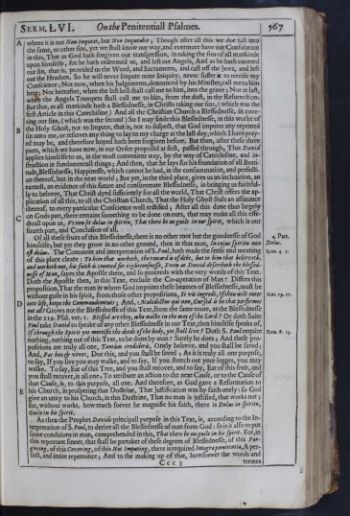 Serm. LVI.
On the Penitentiall Psalmes.
567
where it is not Non Imputat, but Non Imputabit; Though after all this we doe fall into
Serm. LVI.
On the Penitentiall Psalmes.
567
where it is not Non Imputat, but Non Imputabit; Though after all this we doe fall into
the same, or other sins, yet we shall know our way, and evermore have our Consolation
in this, That as God hath forgiven our transgression, in taking the sins of all mankinde
upon himselfe, for he hath redeemed us, and left out Angels, And as he hath covered
our sin, that is, provided us the Word, and Sacraments, and cast off the Jews, and left
out the Heathen, So he will never Impute mine Iniquity, never suffer it to terrifie my
Conscience; Not now, when his Judgements, denounced by his Minister, call me to him
here; Nor hereafter, when the last bell shall call me to him, into the grave; Nor at last,
when the Angels Trumpets shall call me to him, from the dust, in the Resurrection.
But that, as all mankinde hath a Blessednesse, in Christs taking our sins, (which was the
first Article in this Catechisme) And all the Christian Church a Blessednesse, in cove-
ring our sins, (which was the second) So I may finde this Blessednesse, in this worke of
the Holy Ghost, not to Impute, that is, not to suspect, that God imputes any repented
sin unto me, or reserves any thing to lay to my charge at the last day, which I have pray-
ed may be, and therefore hoped hath been forgiven before. But then, after these three
parts, which we have now, in our Order proposed at first, passed through, That David
applies himselfe to us, in the most convenient way, by the way of Catechisme, and in-
struction in fundamentall things; And then, that he lays for his foundation of all Beati-
tude, Blessednesse, Happinesse, which cannot be had, in the consummation, and perfecti-
on thereof, but in the next world; But yet, in the third place, gives us an inchoation, an
earnest, an evidence of this future and consummate Blessednesse, in bringing us faithful-
ly to beleeve, That Christ dyed sufficiently for all the world, That Christ offers the ap-
plication of all this, to all the Christian Church, That the Holy Ghost seals an assurance
thereof, to every particular Conscience well rectified; After all this done thus largely
on Gods part, there remains something to be done on ours, that may make all this effe-
ctuall upon us, Vt non sit dolus in spiritu, That there be no guile in our spirit, which is our
fourth part, and Conclusion of all.
Of all these fruits of this Blessednesse, there is no other root but the goodnesse of God 4. Part.
Dolus.
himselfe; but yet they grow in no other ground, then in that man, In cujus spiritu non
est dolus. The Comment and interpretation of S. Paul,Rom. 4.5. hath made the sense and meaning
of this place cleare: To him that worketh, the reward is of debt, but to him that beleeveth,
and worketh not, his faith is counted for righteousnesse, Even as David describeth the blessed-
nesse of Man, sayes the Apostle there, and so proceeds with the very words of this Text.
Doth the Apostle then, in this Text, exclude the Co-operation of Man? Differs this
proposition, That the man in whom God imprints these beames of Blessednesse, must be
without guile in his spirit, from those other propositions, Si vis ingredi,Mat. 19.17. If thou wilt enter
into life, keepe the Commandements; And, Maledictus qui non, Cursed is he that performes
not all? Grows not the Blessednesse of this Text, from the same roote, as the Blessednesse
in the 119. Psal. ver. 1. Blessed are they, who walke in the way of the Lord? Or doth Saint
Paul take David to speake of any other Blessednesse in our Text, then himselfe speaks of,
If through the Spirit yee mortifie the deeds of the body, yee shall live?Rom. 8.13. Doth S. Paul require
nothing, nothing out of this Text, to be done by man? Surely he does; And these pro-
positions are truly all one, Tantùm credideris, Onely beleeve, and you shall be saved;
And, Fac hoc & vives, Doe this, and you shall be saved; As it is truly all one purpose,
to say, If you live you may walke, and to say, If you stretch out your legges, you may
walke. To say, Eat of this Tree, and you shall recover, and to say, Eat of this fruit, and
you shall recover, is all one; To attribute an action to the next Cause, or to the Cause of
that Cause, is, to this purpose, all one. And therefore, as God gave a Reformation to
his Church, in prospering that Doctrine, That Justification was by faith onely: so God
give an unity to his Church, in this Doctrine, That no man is justified, that works not;
for, without works, how much soever he magnifie his faith, there is Dolus in spiritu,
Guile in his spirit.
As then the Prophet Davids principall purpose in this Text, is, according to the In-
terpretation of S. Paul, to derive all the Blessednesse of man from God: so is it also to put
some conditions in man, comprehended in this, That there be no guile in his spirit. For, in
this repentant sinner, that shall be partaker of these degrees of Blessednesse, of this For-
giving, of this Covering, of this Not Imputing, there is required Integrapœnitentia, A per-
fect, and intire repentance; And to the making up of that, howsoever the words and Ccc3 termes
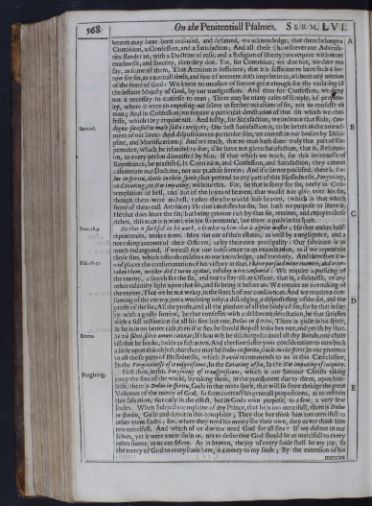 568
On the Penitentiall Psalmes.
Serm. LVI.
termes may have been mis-used, and defamed, we acknowledge, that there belongs a
568
On the Penitentiall Psalmes.
Serm. LVI.
termes may have been mis-used, and defamed, we acknowledge, that there belongs a
Contrition, a Confession, and a Satisfaction; And all these (howsoever our Adversa-
ries slander us, with a Doctrine of ease, and a Religion of liberty) we require with more
exactnesse, and severity, then they doe. For, for Contrition, we doe not, we dare not
say, as some of them, That Attrition is sufficient; that it is sufficient to have such a sor-
row for sin, as a naturall sense, and fear of torment doth imprint in us, without any motion
of the feare of God: We know no measure of sorrow great enough for the violating of
the infinite Majesty of God, by our transgression. And then for Confession, we deny
not a necessity to confesse to man; There may be many cases of scruple, of perplex-
ity, where it were an exposing our selves to farther occasions of sin, not to confesse to
man; And in Confession, we require a particular detestation of that sin which we con-
fesse, which they require not. And lastly, for Satisfaction, we imbrace that Rule, Con-
digna Bernard. satisfactio malè facta corrigere, Our best Satisfaction is, to be better in the amend-
ment of our lives: And dispositions to particular sins, we correct in our bodies by Disci-
pline, and Mortifications; And we teach, that no man hath done truly that part of Re-
pentance, which he is bound to doe, if he have not given Satisfaction, that is, Restituti-
on, to every person damnified by him. If that which we teach, for this intirenesse of
Repentance, be practised, in Contrition, and Confession, and Satisfaction, they cannot
calumniate our Doctrine, nor our practise herein; And if it be not practised, there is Do-
lus in spiritu, Guile in their spirit, that pretend to any part of this Blessednesse, Forgiving,
or Covering, or Not imputing, without this. For, he that is sorry for sin, onely in Con-
templation of hell, and not of the joyes of heaven, that would not give over his sin,
though there were no hell, rather then he would lose heaven, (which is that which
some of them call Attrition) He that confesses his sin, but hath no purpose to leave it,
He that does leave the sin, but being growne rich by that sin, retaines, and enjoyes those
riches, this man is not intire in his Repentanne, but there is guile in his spirit.
He that is slothfull in his work,Prov. 18.9. is brother to him that is a great waster; He that makes half-
repentances, makes none. Men run out of their estates, as well by a negligence, and a
not taking account of their Officers, as by their own prodigality: Our salvation is as
much indangered, if we call not our conscience to an examination, as if we repent not
those sins, which offer themselves to our knowledge, and memory. And therefore Da-
vid places the consummation of his victory in that, Psal. 18.37. I have pursued mine enemies, and over-
taken them, neither did I turne againe, till they were consumed: We require a pursuing of
the enemy, a search for the sin, and not to stay till an Officer, that is, a sicknesse, or any
other calamity light upon that sin, and so bring it before us; We require an overtaking of
the enemy, That we be not weary, in the search of our consciences; And we require a con-
suming of the enemy, not a weakning only; a dislodging, a dispossessing of the sin, and the
profit of the sin; All the profit, and all the pleasure of all the body of sin; for he that is sor-
ry with a godly sorrow, he that confesses with a deliberate detestation, he that satisfies
with a full restitution for all his sins but one, Dolus in spiritu, There is guile in his spirit,
& he is in no better case, Bernar. then if at Sea he should stop all leaks but one, and perish by that.
Si vis solvi, solve omnes catenas; If thou wilt be discharged, cancel all thy Bonds; one chain
till that be broke, holds as fast as ten. And therfore suffer your consideration to turn back
a little upon this object, that there may be Dolus in spiritu, Guile in the spirit, in our pretence
to all those parts of Blessednesse, which David recommends to us in this Catechisme,
In the Forgivenesse of transgrestions, In the Covering of sin, In the Not imputing of iniquity.
First then, Forgiving. in this Forgiving of transgressions, which is our Saviour Christs taking
away the sins of the world, by taking them, in the punishment due to them, upon him-
selfe, there is Dolus in spiritu, Guile in that mans spirit, that will so farre abridge the great
Volumes of the mercy of God, so farre contract his generall propositions, as to restrain
this salvation, not only in the effect, but in Gods own purpose, to a few, a very few
soules. When Subjects complaine of any Prince, that he is too mercifull, there is Dolus
in spiritu, Guile and deceit in this complaint; They doe but think him too mercifull to
other mens faults; for, where they need his mercy for their own, they never think him
too mercifull. And which of us doe not need God for all sins? If we did not in our
selves, yet it were a new sin in us, not to desire that God should be as mercifull to every
other sinner, as to our selves. As in heaven, the joy of every soule shall be my joy, so
the mercy of God to every soule here, is a mercy to my soule; By the extension of his mercies
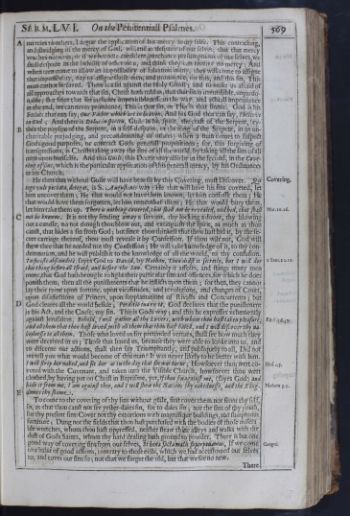 Serm. LVI.
On the Penitentiall Psalmes.
569
mercies to others, I argue the application of his mercy to my selfe. This contracting,
Serm. LVI.
On the Penitentiall Psalmes.
569
mercies to others, I argue the application of his mercy to my selfe. This contracting,
and abridging of the mercy of God, will end in despaire of our selves, that that mercy
reaches not to us, or if we become confident, perchance presumptuous of our selves, we
shall despaire in the behalfe of other men, and think they can receive no mercy: And
when men come to allow an impossibility of salvation in any, they will come to assigne
that impossibility, nay to assigne those men, and pronounce, for this, and this sin, This
man cannot be saved. There is a sin against the Holy Ghost; and to make us afraid of
all approaches towards that sin, Christ hath told us, that that sin is irremissible, unpardo-
nable; But since that sin includes impenitiblenesse in the way, and actuall impenitence
in the end, we can never pronounce, This is that sin, or This is that sinner. God is his
Father that can say, Our Father which art in heaven, And his God that can say, I beleeve
in God; And there is Dolus in spiritu, Guile in his spirit, the craft of the Serpent, (ey-
ther the poyson of the Serpent, in a self-despaire, or the sting of the Serpent, in an un-
charitable prejudging, and precondemning of others) when a man comes to suspect
Gods good purposes, or contract Gods generall propositions; for, this forgiving of
transgressions, is Christs taking away the sins of all the world, by taking all the sins of all
men upon himselfe. And this Guile, this Deceit may also be in the second, in the Cove-
ring of sins, which is the particular application of this generall mercy, by his Ordinances
in his Church.
He then that without Guile will have benefit by this Covering, must Discover.Covering. Qui
tegi vult peccata, detegat, is S. Augustines way: He that will have his sins covered, let
him uncover them; He that would not have them known, let him confesse them; He
that would have them forgotten, let him remember them; He that would bury them,
let him rake them up. There is nothing covered, that shall not be revealed, and hid,Mat. 10.26. that shall
not be knowne. It is not thy sending away a servant, thy locking a doore, thy blowing
out a candle, no not though thou blow out, and extinguish the spirit, as much as thou
canst, that hides a sin from God; but since thou thinkest that thou hast hid it, by the se-
cret carriage thereof, thou must reveale it by Confession. If thou wilt not, God will
shew thee that he needed not thy Confession; He will take knowledge of it, to thy con-
demnation, and he will publish it to the knowledge of all the world, to thy confusion.
Tufecisti absconditè, sayes God to David, by Nathan, Thou didst it secretly,2 Sam. 12.12. but I will doe
this thing before all Israel, and before the Sun. Certainly it affects, and stings many men
more, that God hath brought to light their particular sins and offences, for which he does
punish them, then all the punishments that he inflicts upon them; for then, they cannot
lay their ruine upon fortune, upon vicissitudes, and revolutions, and changes of Court,
upon disaffections of Princes, upon supplantations of Rivalls and Concurrents; but
God cleares all the world beside; Perditio tua ex te, God declares that the punishment
is his Act, and the Cause, my sin. This is Gods way; and this he expresses vehemently
against Jerusalem, Behold, I will gather all thy Lovers, with whom thou hast taken pleasure,
Ezch. 16.37. and all them that thou hast loved, with all them that thou hast hated, and I will discover thy na-
kednesse to all them. Those who loved us for pretended vertues, shall see how much they
were deceived in us; Those that hated us, because they were able to looke into us, and
to discerne our actions, shall then say Triumphantly, and publiquely to all, Did not
we tell you what would become of this man? It was never likely to be better with him.
I will strip her naked, and set her as in the day that she was borne;Hos. 2.3. Howsoever thou wert co-
vered with the Covenant, and taken into the Visible Church, howsoever thou wert
clothed, by having put on Christ in Baptisme, yet, If thou sin against me, (sayes God) and
hide it from me, I am against thee, and I will shew the Nations thy nakednesse, and the King-
domes thy shame.Nahum 3.5.
To come to the covering of thy sins without guile, first cover them not from thy self,
so, as that thou canst not see yester-daies sin, for to daies sin; nor the sins of thy youth,
for thy present sins: Cover not thy extortions with magnifique buildings, and sumptuous
furniture; Dung not the fields that thou hast purchased with the bodies of those misera-
ble wretches, whom thou hast oppressed, neither straw thine alleys and walks with the
dust of Gods Saints, whom thy hard dealing hath ground to powder. There is but one
good way of covering sins from our selves, Si bona factamalis superponamus,Gregor. If we come
to a habit of good actions, contrary to those evils, which we had accustomed our selves
to, and cover our sins so; not that we forget the old, but that we see no new. There
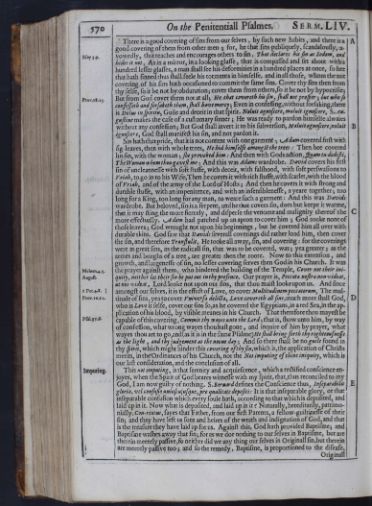 570
On the Penitentiall Psalmes.
Serm. LVI.
570
On the Penitentiall Psalmes.
Serm. LVI.
There is a good covering of sins from our selves, by such new habits, and there is a
good covering of them from other men; for, he that sins publiquely, scandalously, a-
vowedly, that teaches and encourages others to sin;Esay 3.9. That declares his sin as Sodom, and
hides it not, As in a mirror, in a looking glasse, that is compassed and set about with a
hundred lesser glasses, a man shall see his deformities in a hundred places at once, so hee
that hath sinned thus shall feele his torments in himselfe, and in all those, whom the not
covering of his sins hath occasioned to commit the same sins. Cover thy sins then from
thy selfe, so it be not by obduration; cover them from others, so it be not by hypocrisie;
But from God cover them not at all; Prov. 28.13. He that covereth his sin, shall not prosper; but who so
confesseth and forsaketh them, shall have mercy; Even in confessing, without forsaking, there
is Dolus in spiritus, Guile and deceit in that spirit. Noluit agnoscere, maluit ignoscere, S. Au-
gustine makes the case of a customary sinner; He was ready to pardon himselfe alwaies
without any confession; But God shall invert it to his subversion, Maluit agnoscere, noluit
ignoscere, God shall manifest his sin, and not pardon it.
Sin hath that pride, that it is not content with one garment; Adam covered first with
fig-leaves, then with whole trees, He hid himselfe amongst the trees: Then hee covered
his sin, with the woman; she provoked him: And then with Gods action, Quam tu dedisti,
The Woman whom thou gavest me; And this was Adams wardrobe. David covers his first
sin of uncleannesse with soft stuffe, with deceit, with falshood, with soft perswasions to
Vriah, to go in to his Wife; Then he covers it with rich stuffe, with scarlet, with the blood
of Vriah, and of the army of the Lord of Hosts; And then he covers it with strong and
durable stuffe, with an impenitence, and with an insensiblenesse, a yeare together; too
long for a King, too long for any man, to weare such a garment: And this was Davids
wardrobe. But beloved, sin is a serpent, and he that covers sin, does but keepe it warme,
that it may sting the more fiercely, and disperse the venome and malignity thereof the
more effectually. Adam had patched up an apron to cover him; God tooke none of
those leaves; God wrought not upon his beginnings, but he covered him all over with
durable skins. God saw that Davids severall coverings did rather load him, then cover
the sin, and therefore Transtulit, He tooke all away, sin, and covering: for the coverings
were as great sins, as the radicall sin, that was to be covered, was; yea greater; as the
armes and boughs of a tree, are greater then the roote. Now to this extension, and
growth, and largenesse of sin, no lesser covering serves then God in his Church. It was
the prayer against them, Nehem. 4.5.
August. who hindered the building of the Temple, Cover not their ini-
quity, neither let their sin be put out in thy presence. Our prayer is, Peccata nostra non videat,
ut nos videat, Lord looke not upon our sins, that thou maist looke upon us. And since
amongst our selves, 1 Pet. 4.8.
Prov. 10.12. it is the effect of Love, to cover Multitudinem peccatorum, The mul-
titude of sins, yea to cover Vniversa delicta, Lovè covereth all sins, much more shall God,
who is Love it selfe, cover our sins so, as he covered the Egyptians, in a red Sea, in the ap-
plication of his blood, by visible meanes in his Church. That therefore thou mayest be
capable of this covering, Psal. 37.6. Commit thy wayes unto the Lord; that is, show unto him, by way
of confession, what wrong wayes thou hast gone, and inquire of him by prayer, what
wayes thou art to go, and (as it is in the same Psalme) He shall bring forth thy righteousnesse
as the light, and thy judgement as the noone day; And so there shall be no guile found in
thy spirit, which might hinder this covering of thy sin, which is, the application of Christs
merits, in the Ordinances of his Church, nor the Not imputing of thine iniquity, which is
our last consideration, and the conclusion of all.
This not imputing,Imputing. is that serenity and acquiescence, which a rectified conscience en-
joyes, when the Spirit of God beares witnesse with my spirit, that, thus reconciled to my
God, I am now guilty of nothing. S. Bernard defines the Conscience thus, Inseparabilis
gloria, vel confusio uniuscujusque, pro qualitate depositi: It is that inseparable glory, or that
inseparable confusion which every soule hath, according to that which is deposited, and
laid up in it. Now what is deposited, and laid up in it? Naturally, hereditarily, patrimo-
nially, Con-reatus, sayes that Father, from our first Parents, a fellow-guiltinesse of their
sin; and they have left us sons and heires of the wrath and indignation of God, and that
is the treasure they have laid up for us. Against this, God hath provided Baptisme; and
Baptisme washes away that sin; for as we doe nothing to our selves in Baptisme, but are
therein meerely passive, so neither did we any thing our selves in Originall sin, but therein
are meerely passive too; and so the remedy, Baptisme, is proportioned to the disease, Originall
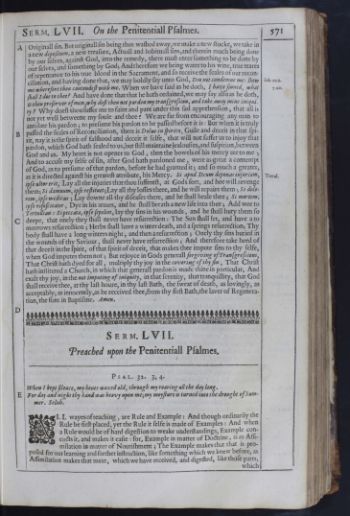 Serm. LVI.
On the Penitentiall Psalmes.
571
Originall sin. But originall sin being thus washed away, we make a new stocke, we take in
Serm. LVI.
On the Penitentiall Psalmes.
571
Originall sin. But originall sin being thus washed away, we make a new stocke, we take in
a new depositum, a new treasure, Actuall and habituall sins, and therein much being done
by our selves, against God, into the remedy, there must enter something to be done by
our selves, and something by God; And therefore we bring water to his wine, true teares
of repentance to his true blood in the Sacrament, and so receive the seales of our recon-
ciliation, and having done that, we may boldly say unto God, Doe not condemne me:Iob 10.2. shew
me wherefore thou contendest with me. When we have said as he doth, I have sinned,Iob 7.20. what
shall I doe to thee? And have done that that he hath ordained, we may say also as he doth,
O thou preserver of men, why dost thou not pardon my transgression, and take away mine iniqui-
ty? Why doest thou suffer me to faint and pant under this sad apprehension, that all is
not yet well betweene my soule and thee? We are far from encouraging any man to
antidate his pardon; to presume his pardon to be passed before it is: But when it is truly
passed the seales of Reconciliation, there is Dolus in spiritu, Guile and deceit in that spi-
rit, nay it is the spirit of falshood and deceit it selfe, that will not suffer us to injoy that
pardon, which God hath sealed to us, but still maintaine jealousies, and suspition, between
God and us. My heart is not opener to God, then the bowels of his mercy are to me;
And to accuse my selfe of sin, after God hath pardoned me, were as great a contempt
of God, as to presume of that pardon, before he had granted it; and so much a greater,
as it is directed against his greatest attribute, his Mercy. Si apud Deum deponas injuriam,
Tertul. ipse ultor erit, Lay all the injuries that thou sufferest, at Gods feet, and hee will revenge
them; Si damnum, ipse restituet; Lay all thy losses there, and he will repaire them; Si dolo-
rem, ipse medicus; Lay downe all thy diseases there, and he shall heale thee; Si mortem,
ipse resuscitator, Dye in his armes, and he shall breath a new life into thee; Add wee to
Tertullian: Si peccata, ipse sepeliet, lay thy sins in his wounds, and he shall bury them so
deepe, that onely they shall never have resurrection: The Sun shall set, and have a to
morrows resurrection; Herbs shall have a winter death, and a springs resurrection; Thy
body shall have a long winters night, and then a resurrection; Onely thy sins buried in
the wounds of thy Saviour, shall never have resurrection; And therefore take heed of
that deceit in the spirit, of that spirit of deceit, that makes thee impute sins to thy selfe,
when God imputes them not; But rejoyce in Gods generall forgiving of Transgressions,
That Christ hath dyed for all, multiply thy joy in the covering of thy sin, That Christ
hath instituted a Church, in which that generall pardon is made thine in particular, And
exalt thy joy, in the not imputing of iniquity, in that serenity, that tranquillity, that God
shall receive thee, at thy last houre, in thy last Bath, the sweat of death, as lovingly, as
acceptably, as innocently, as he received thee, from thy first Bath, the laver of Regenera-
tion, the font in Baptisme. Amen.
Serm. LVII.
Preached upon the Penitentiall Psalmes.
Psal. 32. 3, 4.
When I kept silence, my bones waxed old, through my roaring all the day long.
For day and night thy hand was heavy upon me; my moysture is turned into the drought of Sum-
mer. Selah.
ALLAll wayes of teaching, are Rule and Example: And though ordinarily the
Rule be first placed, yet the Rule it selfe is made of Examples: And when
a Rule would be of hard digestion to weake understandinge, Example con-
cocts it, and makes it easie: for, Example in matter of Doctrine, is as Assi-
milation in matter of Nourishment; The Example makes that that is pro-
posed for our learning and farther instruction, like something which we knew before, as
Assimilation makes that meat, which we have received, and digested, like those parts, which
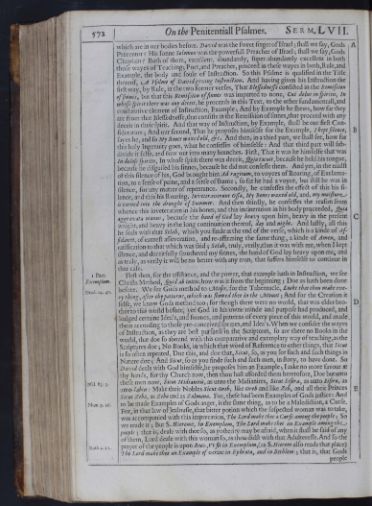 572
On the Penitentiall Psalmes.
Serm. LVII.
which are in our bodies before. David was the sweet singer of Israel; shall we say, Gods
572
On the Penitentiall Psalmes.
Serm. LVII.
which are in our bodies before. David was the sweet singer of Israel; shall we say, Gods
Precentor? His sonne Solomon was the powerfull Preacher of Israel; shall we say, Gods
Chaplain? Both of them, excellent, abundantly, super-abundantly excellent in both
those wayes of Teaching; Poet, and Preacher, proceed in these wayes in both, Rule, and
Example, the body and soule of Instruction. So this Psalme is qualified in the Title
thereof, A Psalme of David giving Instruction. And having given his Instruction the
first way, by Rule, in the two former verses, That Blessednesse consisted in the Remission
of sinnes, but that this Remission of sinnes was imparted to none, Cui dolus in spiritu, In
whose spirit there was any deceit, he proceeds in this Text, to the other fundamentall, and
constitutive element of Instruction, Example; And by Example he shews, how far they
are from that Blessednesse, that consists in the Remission of sinnes, that proceed with any
deceit in their spirit. And that way of Instruction, by Example, shall be our first Con-
sideration; And our second, That he proposes himselfe for the Example, I kept silence,
sayes he, and so My Bones waxed old, &c. And then, in a third part, we shall see, how far
this holy Ingenuity goes, what he confesses of himselfe: And that third part will sub-
divide it selfe, and flow out into many branches. First, That it was he himselfe that was
In doloso spiritu, In whose spirit there was deceit, Quia tacuit, because he held his tongue,
because he disguised his sinnes, because he did not confesse them. And yet, in the midst
of this silence of his, God brought him Ad rugitum, to voyces of Roaring, of Exclama-
tion, to a sense of paine, and a sense of shame; so far he had a voyce, but still he was in
silence, for any matter of repentance. Secondly, he confesses the effect of this his si-
lence, and this his Roaring, Inveteraverunt Ossa, My Bones waxed old, and, my moisture
is turned into the drought of Summer. And then thirdly, he confesses the reason from
whence this inveteration in his bones, and this incineration in his body proceeded, Quia
aggravata manus, because the hand of God lay heavy upon him, heavy in the present
waight, and heavy in the long continuation thereof, day and night. And lastly, all this
he seals with that Selah, which you finde at the end of the verse, which is a kinde of Af-
fidavit, of earnest asseveration, and re-affirming the same thing, a kinde of Amen, and
ratification to that which was said; Selah, truly, verily, thus it was with me, when I kept
silence, and deceitfully smothered my sinnes, the hand of God lay heavy upon me, and
as truly, as verily it will be no better with any man, that suffers himselfe to continue in
that case.
First then, 1 Part.
Exemplum. for the assistance, and the power, that example hath in Instruction, we see
Christs Method, Quid ab initio, how was it from the beginning; Doe as hath been done
before. We see Gods method to Moses, for the Tabernacle, Looke that thou make eve-
ry thing,Exod. 24.40. after thy patterne, which was shewed thee in the Mount; And for the Creation it
selfe, we know Gods method too; for though there were no world, that was elder bro-
ther to this world before, yet God in his owne minde and purpose had produced, and
lodged certaine Idea's, and formes, and patterns of every piece of this world, and made
them according to those pre-conceived formes, and Idea's. When we consider the wayes
of Instruction, as they are best pursued in the Scriptures, so are there no Books in the
world, that doe so abound with this comparative and exemplary way of teaching, as the
Scriptures doe; No Books, in which that word of Reference to other things, that Sicut
is so often repeated, Doe this, and doe that, Sicut, so, as you see such and such things in
Nature doe; And Sicut, so as you finde such and such men, in story, to have done. So
David deals with God himselfe, he proposes him an Example; I aske no more favour at
thy hands, for thy Church now, then thou hast afforded them heretofore, Doe but unto
these men now, Psal. 83.3. Sicut Midianitis, as unto the Midianites, Sicut Siseræ, as unto Sisera, as
unto Iabin: Make their Nobles Sicut Oreb, like Oreb and like Zeb, and all their Princes
Sicut Zeba, as Zeba and as Zalmana. For, these had been Examples of Gods justice: And
to be made Examples of Gods anger, Num. 5.26. is the same thing, as to be a Malediction, a Curse.
For, in that law of Jealousie, that bitter potion which the suspected woman was to take,
was accompanied with this imprecation, The Lord make thee a Curse among the people; So
we reade it; But S. Hierome, In Exemplum, The Lord make thee an Example among the
people; that is, deale with thee so, as posterity may be afraid, when it shall be said of any
of them, Lord deale with this woman so, as thou didst with that Adulteresse. And so the
prayer of the people is upon Booz,Ruth 4.11. Vt sit in Exemplum, (as S. Hierom also reads that place)
The Lord make thee an Example of vertue in Ephrata, and in Bethlem; that is, that Gods people
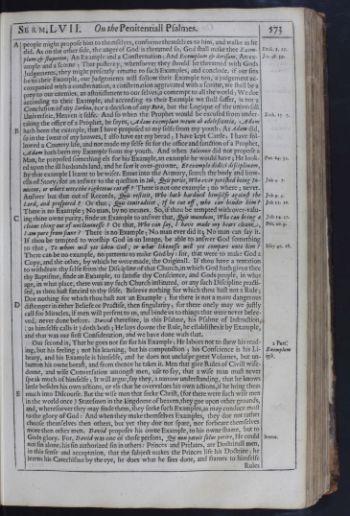 Serm. LVII.
On the Penitentiall Psalmes.
573
people might propose him to themselves, conforme themselves to him, and walke as he
Serm. LVII.
On the Penitentiall Psalmes.
573
people might propose him to themselves, conforme themselves to him, and walke as he
did. As on the other side, the anger of God is threatned so, Ezek. 5.15.
Jer. 48.39. God shall make thee Exem-
plum & stuporem, An Example and a Consternation; And Exemplum & derisum, An ex-
ample and a scorne; That posterity, whensoever they should be threatned with Gods
Judgements, they might presently returne to such Examples, and conclude, if our sins
be to their Example, our Judgements will follow their Example too, a judgement ac-
companied with a consternation, a consternation aggravated with a scorne, we shall be a
prey to our enemies, an astonishment to our selves, a contempt to all the world; We doe
according to their Example, and according to their Example we shall suffer, is not a
Conclusion of any Sorbon, nor a decision of any Rota, but the Logique of the universall
Universitie, Heaven it selfe.Zech. 13.5. And so when the Prophet would be excused from under-
taking the office of a Prophet, he sayes, Adam exemplum meum ab adolescentia, Adam
hath been the example, that I have proposed to my selfe from my youth; As Adam did,
so in the sweat of my browes, I also have eat my bread; I have kept Cattle; I have fol-
lowed a Country life, and not made my selfe fit for the office and function of a Prophet,
Adam hath been my Example from my youth. And when Solomon did not propose a
Man, he proposed something els for his Example, an example he would have;Pro. 24.32. He look-
ed upon the ill husbands land, and he saw it over-growne, Et exemplo didici disciplinam,
By that example I learnt to be wiser. Enter into the Armory, search the body and bow-
ells of Story, for an answer to the question in Iob, Quis periit, Who ever perished being In-
nocent,Job 4.7. or where were the righteous cut off? There is not one example; no where; never.
Answer but that out of Records, Quis restitit, Job 9.4.
Job 11.10. Who hath hardned himselfe against the
Lord, and prospered? Or that, Quis contradicet, If he cut off, who can hinder him?
There is no Example; No man, by no meanes. So, if thou be tempted with over-valu-
ing thine owne purity, finde an Example to answer that, Job 14.27.
Pro. 20.9. Quis mundum, Who can bring a
cleane thing out of uncleannesse? Or that, Who can say, I have made my heart cleane,
I am pure from sinne? There is no Example; No man ever did it; No man can say it.
If thou be tempted to worship God in an Image, be able to answer God something
to that, To whom will yee liken God, or what likenesse will yee compare unto him?
Esay 40.18. There can be no example, no patterne to make God by: for, that were to make God a
Copy, and the other, by which he were made, the Originall. If thou have a tentation
to withdraw thy selfe from the Discipline of that Church, in which God hath given thee
thy Baptisme, finde an Example, to satisfie thy Conscience, and Gods people, in what
age, in what place, there was any such Church instituted, or any such Discipline practi-
sed, as thou hast fancied to thy selfe. Beleeve nothing for which thou hast not a Rule;
Doe nothing for which thou hast not an Example; for there is not a more dangerous
distemper in either Beliefe or Practise, then singularity; for there onely may we justly
call for Miracles, if men will present to us, and binde us to things that were never belee-
ved, never done before. David therefore, in this Psalme, his Psalme of Instruction,
(as himselfe calls it) doth both; He lays downe the Rule, he establishes it by Example,
and that was our first Consideration, and we have done with that.
Our second is, That he goes not far for his Example;2 Part.
Exemplum
ipse. He labors not to shew his read-
ing, but his feeling; not his learning, but his compunction; his Conscience is his Li-
brary, and his Example is himselfe, and he does not unclaspe great Volumes, but un-
button his owne breast, and from thence he takes it. Men that give Rules of Civill wise-
dome, and wise Conversation amongst men, use to say, that a wise man must never
speak much of himselfe; It will argue, say they, a narrow understanding, that he knows
little besides his own actions, or els that he overvalues his own actions, if he bring them
much into Discourse. But the wise men that seeke Christ, (for there were such wise men
in the world once) Statesmen in the kingdome of heaven, they goe upon other grounds,
and, wheresoever they may finde them, they seeke such Examples, as may conduce most
to the glory of God: And when they make themselves Examples, they doe not rather
choose themselves then others, but yet they doe not spare, nor forbeare themselves
more then other men. David proposes his owne Example, to his owne shame, but to
Gods glory. For, David was one of those persons, Qui non potuit solus perire,Bernar. He could
not sin alone, his sin authorized sin in others: Princes and Prelates, are Doctrinall men,
in this sense and acceptation, that the subject makes the Princes life his Doctrine; he
learns his Catechisme by the eye, he does what he sees done, and frames to himselfe Rules
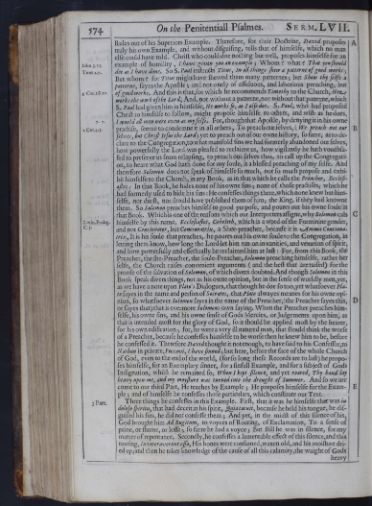 574
On the Penitentiall Psalmes.
Serm. LVII.
Rules out of his Superiors Example. Therefore, for their Doctrine, David proposes
574
On the Penitentiall Psalmes.
Serm. LVII.
Rules out of his Superiors Example. Therefore, for their Doctrine, David proposes
truly his own Example, and without disguising, tells that of himselfe, which no man
else could have told. Christ who could doe nothing but well, proposes himselfe for an
example of humility, Iohn 3.15.
Titus 2.7. I have given you an example; Whom? what? That you should
doe as I have done. So S. Paul instructs Titus, In all things shew a patterne of good works;
But whom? for Titus might have shewed them many patternes; but Shew thy selfe a
patterne, sayes the Apostle; and not onely of assiduous, and laborious preaching, but
of good works.1 Cor. 16.10. And this is that, for which he recommends Timothy to the Church, Hee
works the work of the Lord, And, not without a patterne, nor without that patterne, which
S. Paul had given him in himselfe, He works so, as I also doe. S. Paul, who had proposed
Christ to himselfe to follow, might propose himselfe to others, and wish as he does,
I would all men were even as my selfe.1 Cor. 7.7. For, though that Apostle, by denying it in his owne
practise, 2 Cor. 4.5. seeme to condemne it in all others, To preach our selves, (We preach not our
selves, but Christ Iesus the Lord) yet to preach out of our owne history, so farre, as to de-
clare to the Congregation, to what manifold sins we had formerly abandoned our selves,
how powerfully the Lord was pleased to reclaime us, how vigilantly he hath vouchsa-
fed to preserve us from relapsing, to preach our selves thus, to call up the Congregati-
on, to heare what God hath done for my soule, is a blessed preaching of my selfe. And
therefore Solomon does not speak of himselfe so much, nor so much propose and exhi-
bit himselfe to the Church, in any Book, as in that which he calls the Preacher, Ecclesi-
astes: In that Book, he hides none of his owne sins; none of those practises, which he
had formerly used to hide his sins: He confesses things there, which none knew but him-
selfe, nor durst, nor should have published them of him, the King, if they had knowne
them. So Solomon preaches himself to good purpose, and poures out his owne soule in
that Book. Which is one of the reasons which our Interpreters assigne, why Solomon cals
himselfe by this name, Lorin. Proleg.
C. 5. Ecclesiastes, Coheleth, which is a word of the Foeminine gender,
and not Concionator, but Concionatrix, a Shee-preacher, because it is Anima Conciona-
trix, It is his soule that preaches, he poures out his owne soule to the Congregation, in
letting them know, how long the Lord let him run on in vanities, and vexation of spirit,
and how powerfully and effectually he reclaimed him at last: For, from this Book, the
Preacher, the she-Preacher, the soule-Preacher, Solomon preaching himselfe, rather her
selfe, the Church raises convenient arguments (and the best that are raised) for the
proofe of the salvation of Solomon, of which divers doubted. And though Solomon in this
Book speak divers things, not as his owne opinion, but in the sense of worldly men, yet,
as we have a note upon Plato's Dialogues, that though he doe so too, yet whatsoever Pla-
to sayes in the name and person of Socrates, that Plato alwayes meanes for his owne opi-
nion, so whatsoever Solomon sayes in the name of the Preacher, (the Preacher sayes this,
or sayes that) that is evermore Solomons own saying. When the Preacher preaches him-
selfe, his owne sins, and his owne sense of Gods Mercies, or Judgements upon him, as
that is intended most for the glory of God, so it should be applied most by the hearer,
for his own edification; for, he were a very ill natured man, that should think the worse
of a Preacher, because he confesses himselfe to be worse then he knew him to be, before
he confessed it. Therefore David thought it not enough, to have said to his Confessor, to
Nathan in private, Peccavi, I have sinned; but here, before the face of the whole Church
of God, even to the end of the world, (for so long these Records are to last) he propo-
ses himselfe, for an Exemplary sinner, for a sinfull Example, and for a subject of Gods
Indignation, whilst he remained so, When I kept silence, and yet roared, Thy hand lay
heavy upon me, and my moysture was turned into the drought of Summer. And so we are
come to our third Part, He teaches by Example; He proposes himselfe for the Exam-
ple; and of himselfe he confesses those particulars, which constitute our Text.
Three things he confesses in this Example.3 Part. First, that it was he himselfe that was in
doloso spiritu, that had deceit in his spirit, Quia tacuit, because he held his tongue, he dis-
guised his sins, he did not confesse them; And yet, in the midst of this silence of his,
God brought him Ad Rugitum, to voyces of Roaring, of Exclamation, To a sense of
paine, or shame, or losse; so farre he had a voyce; But still he was in silence, for any
matter of repentance. Secondly, he confesses a lamentable effect of this silence, and this
roaring, Inveteraverunt ossa, His bones were consumed, waxen old, and his moisture dri-
ed up; and then he takes knowledge of the cause of all this calamity, the waight of Gods heavy
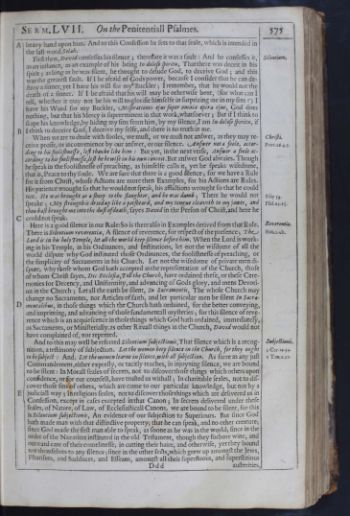 Serm. LVII.
On the Penitentiall Psalmes.
575
heavy hand upon him. And to this Confession he sets to that seale, which is intended in
Serm. LVII.
On the Penitentiall Psalmes.
575
heavy hand upon him. And to this Confession he sets to that seale, which is intended in
the last word, Selah.
First then, David confesses his silence; therefore it was a fault: And he confesses it,
Silentium. as an instance, as an example of his being In doloso spiritu, That there was deceit in his
spirit; as long as he was silent, he thought to delude God, to deceive God; and this
was the greatest fault. If I be afraid of Gods power, because I consider that he can de-
stroy a sinner, yet I have his will for my Buckler; I remember, that he would not the
death of a sinner. If I be afraid that his will may be otherwise bent, (for what can I
tell, whether it may not be his will to glorifie himselfe in surprizing me in my sins?) I
have his Word for my Buckler, Miserationes ejus super omnia opera ejus, God does
nothing, but that his Mercy is supereminent in that work, whatsoever; But if I think to
scape his knowledge, by hiding my sins from him, by my silence, I am In doloso spiritu, if
I think to deceive God, I deceive my selfe, and there is no truth in me.
When we are to deale with fooles, we must, or we must not answer, Christi.
Prov. 26.4.5. as they may re-
ceive profit, or inconvenience by our answer, or our silence. Answer not a foole, accor-
ding to his foolishnesse, lest thou be like him: But yet, in the next verse, Answer a foole ac-
cording to his foolishnesse, lest he be wise in his own conceit. But answer God alwaies. Though
he speak in the foolishnesse of preaching, as himselfe calls it, yet he speaks wisedome,
that is, Peace to thy soule. We are sure that there is a good silence; for we have a Rule
for it from Christ, whose Actions are more then Examples, for his Actions are Rules.
His patience wrought so that he would not speak, his afflictions wrought so that he could
not. He was brought as a sheep to the slaughter, and he was dumb;Esay 59.
Psal. 22.15. There he would not
speake; My strength is dried up like a potsheard, and my tongue cleaveth to my jawes, and
thou hast brought me into the dust of death, sayes David in the Person of Christ, and here he
could not speak.
Here is a good silence in our Rule: So is there also in Examples derived from that Rule. Reverentiæ.
Hab. 2. ult.
There is Silentium reverentiæ, A silence of reverence, for respect of the presence; The
Lord is in his holy Temple, let all the world keep silence before him. When the Lord is work-
ing in his Temple, in his Ordinances, and Institutions, let not the wisdome of all the
world dispute why God instituted those Ordinances, the foolishnesse of preaching, or
the simplicity of Sacraments in his Church. Let not the wisedome of private men di-
spute, why those whom God hath accepted as the representation of the Church, those
of whom Christ sayes, Dic Ecclesiæ, Tell the Church, have ordained these, or these Cere-
monies for Decency, and Uniformity, and advancing of Gods glory, and mens Devoti-
on in the Church; Let all the earth be silent, In Sacramentis, The whole Church may
change no Sacraments, nor Articles of faith, and let particular men be silent In Sacra-
mentalibus, in those things which the Church hath ordained, for the better conveying,
and imprinting, and advancing of those fundamentall mysteries; for this silence of reve-
rence which is an acquiescence in those things which God hath ordained, immediately,
as Sacraments, or Ministerially, as other Rituall things in the Church, David would not
have complained of, nor repented.
And to this may well be referred Silentium subjectionis,Subjectionis.
1 Cor. 14.34.
1 Tim. 2.11. That silence which is a recog-
nition, a testimony of subjection. Let the women keep silence in the Church, for they ought
to be subject: And, Let the women learne in silence, with all subjection. As farre as any just
Commandement, either expresly, or tacitly reaches, in injoyning silence, we are bound
to be silent: In Morall seales of secrets, not to discover those things which others upon
confidence, or for our counsell, have trusted us withall; In charitable seales, not to dis-
cover those sins of others, which are come to our particular knowledge, but not by a
judiciall way; In religious seales, not to discover those things which are delivered us in
Confession, except in cases excepted in that Canon; In secrets delivered under these
seales, of Nature, of Law, of Ecclesiasticall Canons, we are bound to be silent, for this
is Silentium subjectionis, An evidence of our subjection to Superiours. But since God
hath made man with that distinctive property, that he can speak, and no other creature;
since God made the first man able to speak, as soone as he was in the world; since in the
order of the Nazarites instituted in the old Testament, though they forbore wine, and
outward care of their comelinesse, in cutting their haire, and otherwise, yet they bound
not themselves to any silence; since in the other sects, which grew up amongst the Jews,
Pharisees, and Sadduces, and Esseans, amongst all their superfluous, and superstitious Ddd austerities,
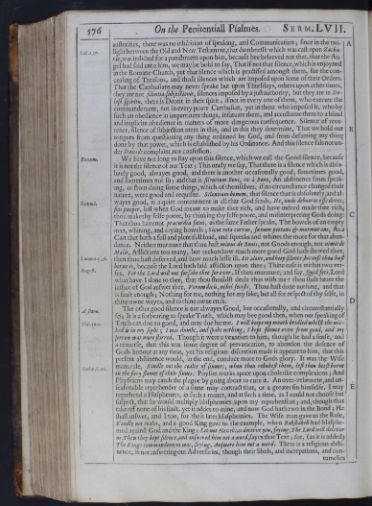 576
On the Penitentiall Psalmes.
Serm. LVII.
austerities, there was no inhibition of speaking, and Communication; since in the twi-
576
On the Penitentiall Psalmes.
Serm. LVII.
austerities, there was no inhibition of speaking, and Communication; since in the twi-light between the Old and New Testament, Luk. 1.20. that dumbnesse which was cast upon Zacha-
ric, was inflicted for a punishment upon him, because hee beleeved not that, that the An-
gel had said unto him, we may be bold to say, That if not that silence, which is enjoyned
in the Romane Church, yet that silence which is practised amongst them, for the con-
cealing of Treasons, and those silences which are imposed upon some of their Orders,
That the Carthusians may never speake but upon Thursdays, others upon other times,
they are not silentia subjectionis, silences imposed by a just authority, but they are in Do-
loso spiritu, there is Deceit in their spirit; if not in every one of them, who execute the
commandement, not in every poore Carthusian, yet in them who imposed it, who by
such an obedience in impertinent things, infatuate them, and accustome them to a blind
and implicite obedience in matters of more dangerous consequence. Silence of reve-
rence, silence of subjection meet in this, and in this they determine, That we hold our
tongues from questioning any thing ordained by God, and from defaming any thing
done by that power, which is established by his Ordinance. And this silence fals not un-
der Davids complaint, nor confession.
We have not long to stay upon this silence, Bonum. which we call the Good silence, because
it is not the silence of our Text; This onely we say, That there is a silence which is abso-
lutely good, alwayes good, and there is another occasionally good, sometimes good,
and sometimes not so; and that is silentium Boni, or à Bono, An abstinence from speak-
ing, or from doing some things, which of themselves, if no circumstance changed their
nature, were good and requisite. Silentium bonum, that silence that is absolutely, and al-
wayes good, Bernard. is a quiet contentment in all that God sends, Ne, unde debueras esse dives,
fias pauper, lest when God meant to make thee rich, and have indeed made thee rich,
thou makethy selfe poore, by thinking thy selfe poore, and misinterpreting Gods doing:
That thou have not præcordia fatui, as the same Father speaks, The bowels of an empty
man, whining, and crying bowels; Sicut rota currus, fœnum portans & murmur ans, As a
Cart that hath a full and plentifull load, and squeaks and whines the more for that abun-
dance. Neither murmure that thou hast minus de Bonis, not Goods enough, nor nimis de
Malis, Afflictions too many, but reckon how much more good God hath shewed thee,
then thou hast deserved, Lament. 3.28. and how much lesse ill. Sit alone, and keep silence, because thou hast
borne it, because the Lord hath laid affliction upon thee; Thine ease is within two ver-
ses, August. For the Lord will not for sake thee for ever. If thou murmure, and say, Quid feci, Lord
what have I done to thee, that thou shouldst deale thus with me? thou shalt heare the
justice of God answer thee, Verumdicis, nihil fecisti, Thou hast done nothing, and that
is fault enough; Nothing for me, nothing for my sake, but all for respect of thy selfe, in
thine owne wayes, and to thine owne ends.
The other good silence is not alwayes Good, A Bono. but occasionally, and circumstantially
so; It is a forbearing to speake Truth, which may bee good then, when our speaking of
Truth can doe no good, Psal. 39.2. and may doe harme. I will keepe my mouth bridled whilst the wic-
ked is in my sight; I was dumbe, and spake nothing, I kept silence even from good, and my
sorrow was more stirred. Though it were a vexation to him, though he had a sense, and
a remorse, that this was some degree of prevarication, to abandon the defence of
Gods honour at any time, yet his religious discretion made it appeare to him, that this
present abstinence would, in the end, conduce more to Gods glory. It was the Wise
mans rule, Ecclus. 8.10. Kindle not the coales of sinners, when thou rebukest them, lest thou beest burnt
in the fiery flames of their sinnes. Poyson works apace upon cholerike complexions; And
Physitians may catch the plague by going about to cure it. An over-vehement, and un-
seasonable reprehender of a sinne may contract that, or a greater sin himselfe. I may
reprehend a Blasphemer, in such a maner, and at such a time, as I could not choose but
suspect, that he would multiply blasphemies upon my reprehension; and, though that
take off none of his fault, yet it addes to mine, and now God hath two in the Bond; He
shall answer, and I too, for these later blasphemies. The Wise man gave us the Rule,
Kindle not coales, and a good King gave us the example, when Rabshakeh had blasphe-
med against God and the King; Let not Hezekias deceive you, saying, The Lord will deliver
us, Then they kept silence, and answered him not a word, sayes that Text; for, (as it is added)
The Kings commandement was, saying, Answere him not a word. There is a religious absti-
nence, in not answering our Adversaries, though their libels, and increpations, and con-
tumelies
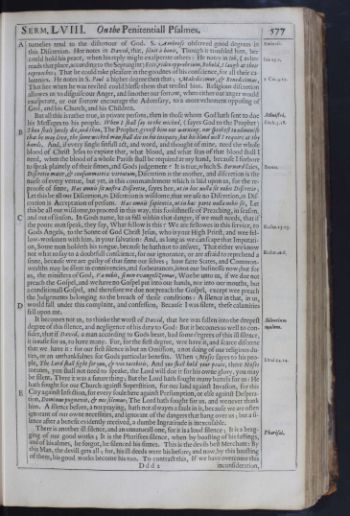 Serm. LVII.
On the Penitentiall Psalmes.
577
tumelies tend to the dishonour of God. S. Ambrose observed good degrees in
Serm. LVII.
On the Penitentiall Psalmes.
577
tumelies tend to the dishonour of God. S. Ambrose observed good degrees in
this Discretion.Ambrose. Hee notes in David, that, siluit à bonis, Though it troubled him, hee
could hold his peace, when his reply might exasperate others: He notes in Iob,Iob 19.7. (as hee
reads that place, according to the Septuagint) Ecce, rideo opprobrium, Behold, I laugh at their
reproaches; That he could take pleasure in the goodnes of his conscience, for all their ca-
lumnies. He notes in S. Paul a higher degree then that; Maledicimur, & Benedicimus,
1 Cor. 4.12. That hee when he was reviled could blesse them that reviled him. Religious discretion
allowes us to disguise our Anger, and smother our sorrow, when either our anger would
exasperate, or our sorrow encourage the Adversary, to a more vehement opposing of
God, and his Church, and his Children.
But all this is rather true, in private persons, Ministri.
Ezek. 3.18. then in those whom God hath sent to doe
his Messages to his people. When I shall say to the wicked, (sayes God to the Prophet)
Thou shalt surely die, and thou, The Prophet, givest him not warning, nor speakest to admonish
that he may live, the same wicked man shall die in his iniquity, but his blood will I require at thy
hands. And, if every single sinfull act, and word, and thought of mine, need the whole
blood of Christ Jesus to expiate that, what blood, and what seas of that blood shall I
need, when the blood of a whole Parish shall be required at my hand, because I forbore
to speak plainely of their sinnes, and Gods judgement? It is true, which S. Bernard saies,
Bernat. Discretio mater, & consummatrix virtutum, Discretion is the mother, and discretion is the
nurse of every vertue, but yet, in this commandement which is laid upon us, for the re-
proofe of sinne, Hæc omnis sit nostra Discretie, sayes hee, ut in hoc nulla sit nobis Discretio;
Let this be all our Discretion, as Discretion is wisdome, that we use no Discretion, as Dis-
cretion is Acceptation of persons. Hæc omnis sapientia, ut in hac parte nulla nobis sit, Let
this be all our wisdome, to proceed in this way, this foolishnesse of Preaching, in season,
and out of season. In Gods name, let us fall within that danger, if we must needs, that if
the poore man speak, they say, What fellow is this? We are fellowes in this service, Ecclus. 13.23. to
Gods Angels, to the Sonne of God Christ Jesus, who is your High Priest, and wee fel-
low-workmen with him, in your salvation: And, as long as we can scape that Imputati-
on, Some man holdeth his tongue, because he hath not to answer, That either we know
not what to say to a doubtfull conscience, for our ignorance, Ecclus. 20.6. or are afraid to reprehend a
sinne, because wee are guilty of that sinne our selves; how farre States, and Common-
wealths may be silent in connivencies, and forbearances, is not our businesse now; but for
us, the ministers of God, Vænobis, si non evangelizemus, Woe be unto us, if we doe not
preach the Gospel, and we have no Gospel put into our hands, nor into our mouths, but
a conditionall Gospel, and therefore we doe not preach the Gospel, except wee preach
the Judgements belonging to the breach of those conditions: A silence in that, in us,
would fall under this complaint, and confession, Because I was silent, these calamities
fell upon me.
It becomes not us, to thinke the worst of David,Silentium
malum. that hee was fallen into the deepest
degree of this silence, and negligence of his duty to God: But it becomes us well to con-
sider, that if David, a man according to Gods heart, had some degrees of this ill silence,
it is easie for us, to have many. For, for the first degree, wee have it, and scarce discerne
that we have it: for our first silence is but an Omission, a not doing of our religious du-
ties, or an unthankfulnes for Gods particular benefits.Exod. 14.14. When Moses sayes to his peo-
ple, The Lord shall fight for you, & vos tacebit is, And you shall hold your peace, there Moses
meanes, you shall not need to speake, the Lord will doe it for his owne glory, you may
be silent. There it was a future thing; But the Lord hath fought many battels for us: He
hath fought for our Church against Superstition, for our land against Invasion, for this
City against Infection, for every soule here against Presumption, or else against Despera-
tion, Dominus pugnavit, & nos silemus; The Lord hath fought for us, and we never thank
him. A silence before, a not praying, hath not alwayes a fault in it, because we are often
ignorant of our owne necessities, and ignorant of the dangers that hang over us; but a si-
lence after a benefit evidently received, a dumbe Ingratitude is inexcusable.
There is another ill silence, and an unnaturall one, for it is a loud silence;Pharisai. It is a brag-
ging of our good works; It is the Pharisees silence, when by boasting of his fastings,
and of his almes, he forgot, he silenced his sinnes. This is the devils best Merchant: By
this Man, the devill gets all; for, his ill deeds were his before; and now, by this boasting
of them, his good works become his too. To contract this, If we have overcome this Ddd2 inconsideration,
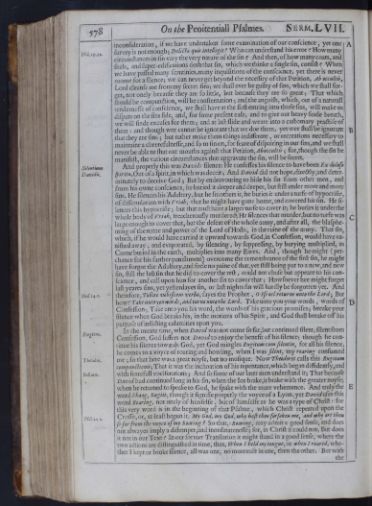 578
On the Penitentiall Psalmes.
Serm. LVII.
inconsideration, if we have undertaken some examination of our conscience, yet one
578
On the Penitentiall Psalmes.
Serm. LVII.
inconsideration, if we have undertaken some examination of our conscience, yet one
survey is not enough;Psal. 19.12. Delicta quis intelligit? Who can understand his error? How many
circumstances in sin vary the very nature of the sin? And then, of how many coats, and
shels, and super-edifications doth that sin, which we thinke a single sin, consist? When
we have passed many scrutinies, many inquisitions of the conscience, yet there is never
roome for a silence; we can never get beyond the necessity of that Petition, Ab occultis,
Lord cleanse me from my secret sins; we shall ever be guilty of sins, which we shall for-
get, not onely because they are so little, but because they are so great; That which
should be compunction, will be consternation; and the anguish, which, out of a naturall
tendernesse of conscience, we shall have at the first entring into those sins, will make us
dispute on the sins side, and, for some present ease, and to give our heavy soule breath,
we will finde excuses for them; and at last slide and weare into a customary practise of
them: and though wee cannot be ignorant that we doe them, yet wee shall be ignorant
that they are sins; but rather make them things indifferent, or recreations necessary to
maintaine a cheerefulnesse, and so to sin on, for feare of dispairing in our sins, and we shall
never be able to shut our mouths against that Petition, Aboccultis; for, though the sin be
manifest, the various circumstances that aggravate the sin, will be secret.
And properly this was Davids silence:Silentium
Davidis. He confesses his silence to have been Ex doloso
spiritu, Out of a spirit, in which was deceit; And David did not hope, directly, and deter-
minately to deceive God; But by endeavouring to hide his sin from other men, and
from his owne conscience, he buried it deeper and deeper, but still under more and more
sins. He silences his Adultery, but he smothers it, he buries it under a turfe of hypocrisie,
of dissimulation with Vriah, that he might have gone home, and covered his sin. He si-
lences this hypocrisie; but that must have a larger turfe to cover it; he buries it under the
whole body of Vriah, treacherously murdered; He silences that murder, but no turfe was
large enough to cover that, but the defeat of the whole army, and after all, the blasphe-
ming of the name and power of the Lord of Hosts, in the ruine of the army. That sin,
which, if he would have carried it upward towards God, in Confession, would have va-
nished away, and evaporated, by silencing, by suppressing, by burying multiplied, as
Corne buried in the earth, multiplies into many Eares. And, though he might (per-
chance for his farther punishment) overcome the remembrance of the first sin, he might
have forgot the Adultery, and feele no paine of that, yet still being put to a new, and new
sin, still the last sin that he did to cover the rest, could not chuse but appeare to his con-
science, and call upon him for another sin to cover that; Howsoever hee might forget
last yeares sins, yet yesterdayes sin, or last nights sin will hardly be forgotten yet. And
therefore, Hos. 14.2. Tollite vobiscum verba, sayes the Prophet, O Israel returne unto the Lord; But
how? Take unto you words, and turne unto the Lord. Take unto you your words, words of
Confession; Take unto you his word, the words of his gracious promises; breake your
silence when God breaks his, in the motions of his Spirit, and God shall breake off his
purpose of inflicting calamities upon you.
In the meane time, Rugitus. when David was not come so far, but continued silent, silent from
Confession, God suffers not David to enjoy the benefit of his silence; though he con-
tinue his silence towards God, yet God mingles Rugitum cum silentio, for all his silence,
he comes to a voyce of roaring and howling, when I was silent, my roaring consumed
me;Theodor. so that here was a great noyse, but no musique. Now Theodoret calls this Rugitum
compunctionis; That it was the inchoation of his repentance, which began diffidently, and
with fearefull vociferations;Bellarm. And so some of our later men understand it; That because
David had continued long in his sin, when the Ice brake, it brake with the greater noyse;
when he returned to speake to God, he spake with the more vehemence. And truly the
word Shaag, Rugiit, though it signifie properly the voyce of a Lyon, yet David uses this
word Roaring, not onely of himselfe, but of himselfe as he was a type of Christ: for
this very word is in the beginning of that Psalme, which Christ repeated upon the
Crosse, Psal. 22.1. or, at least begun it, My God, my God, why hast thou for saken me, and why art thou
so far from the voyce of my Roaring? So that, Roaring, may admit a good sense, and does
not alwayes imply a distemper, and inordinatenesse; for, in Christ it could not; But does
it not in our Text? In our former Translation it might stand in a good sense, where the
two actions are distinguished in time, thus, When I held my tongue, or when I roared, whe-
ther I kept or broke silence, all was one, no more ease in one, then the other. But with the
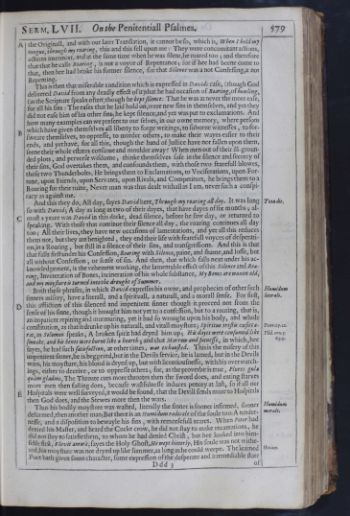 Serm. LVII.
On the Penitentiall Psalmes.
579
the Originall, and with our later Translation, it cannot be so, which is, When I held my
Serm. LVII.
On the Penitentiall Psalmes.
579
the Originall, and with our later Translation, it cannot be so, which is, When I held my
tongue, through my roaring, this and this fell upon me: They were concomitant actions,
actions intermixt, and at the same time when he was silent, he roared too; and therefore
that that he calls Roaring, is not a voyce of Repentance; for if hee had beene come to
that, then hee had broke his former silence, for that Silence was a not Confessing, a not
Repenting.
This is then that miserable condition which is expressed in Davids case, (though God
delivered David from any deadly effect of it) that he had occasion of Roaring, of howling,
(as the Scripture speaks often) though he kept silence: That he was at never the more ease,
for all his sins: The eases that he laid hold on, were new sins in themselves, and yet they
did not ease him of his other sins; he kept silence, and yet was put to exclamations. And
how many examples can we present to our selves, in our owne memory, where persons
which have given themselves all liberty to forge writings, to suborne witnesses, to for-
sweare themselves, to oppresse, to murder others, to make their wayes easier to their
ends, and yet have, for all this, though the hand of Justice have not fallen upon them,
seene their whole estates consume and moulder away? When men out of their ill-groun-
ded plots, and perverse wisdome, thinke themselves safe in the silence and secrecy of
their sins, God overtakes them, and confounds them, with those two fearefull blowes,
those two Thunderbolts, He brings them to Exclamations, to Vociferations, upon For-
tune, upon Friends, upon Servants, upon Rivals, and Competitors, he brings them to a
Roaring for their ruine, Never man was thus dealt withall as I am, never such a conspi-
racy as against me.
And this they do, All day, sayes David here, Through my roaring all day.Tota die. It was long
so with David; A day as long as two of their dayes, that have dayes of six months; al-
most a yeare was David in this darke, dead silence, before he saw day, or returned to
speaking. With those that continue their silence all day, the roaring continues all day
too; All their lives, they have new occasions of lamentations, and yet all this reduces
them not, but they are benighted, they end their life with fearefull voyces of desperati-
on, in a Roaring, but still in a silence of their sins, and transgressions. And this is that
that falls first under his Confession, Roaring with Silence, paine, and shame, and losse, but
all without Confession, or sense of sin. And then, that which falls next under his ac-
knowledgement, is the vehement working, the lamentable effect of this Silence and Roa-
ring, Inveteration of Bones, incineration of his whole substance, My Bones are waxen old,
and my moysture is turned into the drought of Summer.
Both these phrases, in which David expresses his owne, Humidum
literale. and prophecies of other such
sinners misery, have a literall, and a spirituall, a naturall, and a morall sense. For first,
this affliction of this silenced and impenitent sinner though it proceed not from the
sense of his sinne, though it brought him not yet to a confession, but to a roaring, that is,
an impatient repining and murmuring, yet it had so wrought upon his body, and whole
constitution, as that it drunke up his naturall, and vitall moysture;Prov. 17.22.
Psal. 102.3.
63.9. Spiritus tristis exsicca-
rat, as Solomon speaks, A broken spirit had dryed him up; His dayes were consumed like
smoake, and his bones were burnt like a hearth; and that Marrow and fatnesse, in which, hee
sayes, he had such satisfaction, at other times, was exhausted. This is the misery of this
impenitent sinner, he is beggered, but in the Devils service, he is lamed, but in the Devils
wars; his moysture, his blood is dryed up, but with licentiousnesse, with his overwatch-
ings, either to deceive, or to oppresse others; for, as the proverbe is true, Plures gulæ
quàm gladius, The Throate cuts more throates then the sword does, and eating starves
more men then fasting does, because wastfulnesse induces penury at last, so if all our
Hospitals were well surveyed, it would be found, that the Devill sends more to Hospitals
then God does, and the Stewes more then the wars.
Thus his bodily moysture was wasted, literally the sinner is sooner infirmed, Humidum
morale. sooner
deformed, then another man; But there is an Humidum radicale of the soulle too: A tender-
nesse, and a disposition to bewayle his sins, with remorsefull teares. When Peter had
denied his Master, and heard the Cocke crow, he did not stay to make recantations, he
did not stay to satisfie them, to whom he had denied Christ, but hee looked into him-
selfe first, Flevit amarè, sayes the Holy Ghost, He wept bitterly; His soule was not withe-
red, his moysture was not dryed up like summer, as long as he could weepe.Horace. The learned
Poet hath given some character, some expression of the desperate and irremediable state Ddd3 of
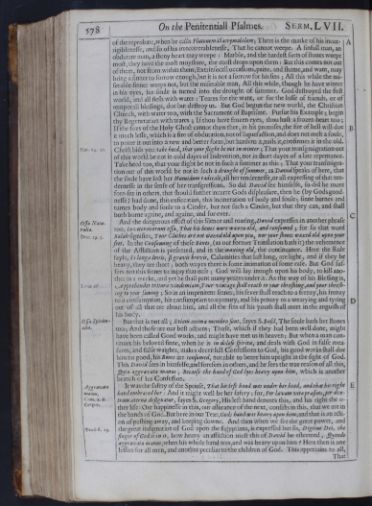 578
On the Penitentiall Psalmes.
Serm. LVII.
of the reprobate, when he calls Plutonem illacrymabilem; There is the marke of his incor-
578
On the Penitentiall Psalmes.
Serm. LVII.
of the reprobate, when he calls Plutonem illacrymabilem; There is the marke of his incor-rigiblenesse, and so of his irrecoverablenesse, That he cannot weepe. A sinfull man, an
obdurate man, a stony heart may weepe: Marble, and the hardest sorts of stones weepe
most, they have the most moysture, the most drops upon them: But this comes not out
of them, not from within them; Extrinsecall occasions, paine, and shame, and want, may
bring a sinner to sorrow enough, but it is not a sorrow for his sins; All this while the mi-
serable sinner weeps not, but the miserable man, All this while, though he have winter
in his eyes, his soule is turned into the drought of summer. God destroyed the first
world, and all flesh with water: Teares for the want, or for the losse of friends, or of
remporall blessings, doe but destroy us. But God begun the new world, the Christian
Church, with water too, with the Sacrament of Baptisme. Pursue his Example; begin
thy Regeneration with teares; If thou have frozen eyes, thou hast a frozen heart too;
If the fires of the Holy Ghost cannot thaw thee, in his promises, the fire of hell will doe
it much lesse, which is a fire of obduration, not of liquefaction, and does not melt a soule,
to poure it out into a new and better form, but hardens it, nails it, confirmes it in the old.
Christ bids you take heed,Mat. 24.20. that your flight be not in winter; That your transgmigration out
of this world be not in cold dayes of Indevotion, nor in short dayes of a late repentance.
Take heed too, that your flight be not in such a summer as this; That your transmigra-
tion out of this world be not in such a drought of summer, as David speaks of here, that
the soule have lost her Humidum radicale, all her tendernesse, or all expressing of that ten-
dernesse in the sense of her transgressions. So did David see himselfe, so did he more
fore-see in others, that should farther incurre Gods displeasure, then he (by Gods good
nesse) had done, this exsiccatian, this incineration of body and soule; sinne burnes and
turnes body and soule to a Cinder, but not such a Cinder, but that they can, and shall
both burne againe, and againe, and for ever.
And the dangerous effect of this silence and roaring, Ossa Natu-
ralia.
Deut. 29.5. David expresses in another phrase
too, Inveter averunt ossa, That his bones were waxen old, and consumed; for so that word
Balah signifies, Your Clothes are not waxed old upon you, nor your shooes waxed old upon your
feet. In the Consuming of these Bones, (as our former Translation hath it) the vehemence
of the Affliction is presented, and in the waxing old, the continuance. Here the Rule
fayls, Si longa levis, sigravis brevis, Calamities that last long, are light, and if they be
heavy, they are short; both wayes there is some intimation of some ease. But God suf-
fers not this sinner to injoy that ease; God will lay inough upon his body, to kill ano-
ther in a weeke, and yet he shall pant many yeares under it. As the way of his Blessing is,
Apprehendet tritura vindemiam,Levit. 26. Your vintage shall reach to your threshing, and your thresh-
ing to your sowing; So in an impenitent sinner, his fever shall reach to a frenzy, his frenzy
to a consumption, his consumption to a penury, and his penury to a wearying and tyring
out of all that are about him, and all the sins of his youth shall meet in the anguish of
his body.
But that is not all;Ossa Spiricu-
alia. Etiam animæ membra sunt, sayes S. Basil, The soule hath her Bones
too; And those are our best actions; Those, which if they had been well done, might
have been called Good works, and might have met us in heaven; But when a man con-
tinues his beloved sinne, when he is in doloso spiritu, and deals with God in false mea-
sures, and false waights, makes deceitfull Confessions to God, his good works shall doe
him no good, his Bones are consumed, not able to beare him upright in the sight of God.
This David sees in himselfe, and foresees in others, and he sees the true reason of all this,
Quia aggravata manus, Because the hand of God lyes heavy upon him, which is another
branch of his Confession.
It was the safety of the Spouse, Aggravata
manus. That his left hand was under her head, and that his right
hand embraced her: And it might well be her safety; for, Per lævam vita præsens, per dex-
tram æterna designatur, Cant. 2.6. sayes S. Gregory, His left hand denotes this, and his right the o-
ther life: Gregor. Our happinesse in this, our assurance of the next, consists in this, that we are in
the hands of God. But here in our Text, Gods hand was heavy upon him; and that is an acti-
on of pushing away, and keeping downe. And then when we see the great power, and
the great indignation of God upon the Egyptians, Exod. 8.19. is expressed but so, Digitus Dei, the
finger of God is in it, how heavy an affliction must this of David be esteemed, Quando
aggravata manus, when his whole hand was, and was heavy upon him? Here then is one
lesson for all men, and another peculiar to the children of God. This appertains to all, That
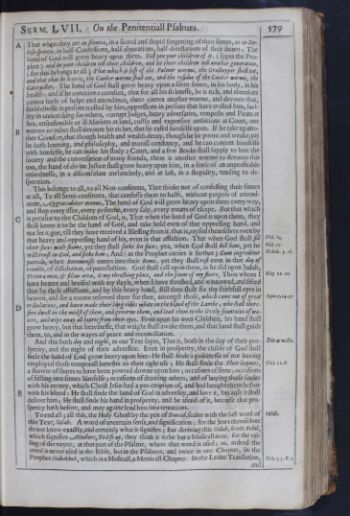 Serm. LVII.
On the Penitentiall Psalmes.
579
That when they are in silentio, in a seared and stupid forgetting of their sinnes, or in Do-
Serm. LVII.
On the Penitentiall Psalmes.
579
That when they are in silentio, in a seared and stupid forgetting of their sinnes, or in Do-loso spiritu, in half-Confessions, half-abjurations, half-detestations of their sinnes; The
hand of God will grow heavy upon them. Tell you your children of it, (sayes the Pro-
phet) and let your children tell their children, and let their children tell another generation,
(for this belongs to all) That which is left of the Palmer worme, the Grashopper shall eat,
and that that he leaves, the Canker worme shall eat, and the residue of the Canker worme, the
Caterpiller. The hand of God shall grow heavy upon a silent sinner, in his body, in his
health; and if he conceive a comfort, that for all his sicknesse, he is rich, and therefore
cannot fayle of helpe and attendance, there comes another worme, and devours that,
faithlesnesse in persons trusted by him, oppressions in persons that have trusted him, faci-
lity in undertaking for others, corrupt Judges, heavy adversaries, tempests and Pirats at
Sea, unseasonable or ill Markets at land, costly and expensive ambitions at Court, one
worme or other shall devoure his riches, that he eased himselfe upon. If he take up ano-
ther Comfort, that though health and wealth decay, though he be poore and weake, yet
he hath learning, and philosophy, and morall constancy, and he can content himselfe
with himselfe, he can make his study a Court, and a few Books shall supply to him the
society and the conversation of many friends, there is another worme to devoure this
too, the hand of divine Justice shall grow heavy upon him, in a sense of an unprofitable
retirednesse, in a disconsolate melancholy, and at last, in a stupidity, tending to de-
speration.
This belongs to all, to all Non-confitents, That thinke not of confessing their sinnes
at all, To all Semi-confitents, that confesse them to halfs, without purpose of amend-
ment, Aggravabitur manus, The hand of God will grow heavy upon them every way,
and stop every issue, every posterne, every saly, every means of escape. But that which
is peculiar to the Children of God, is, That when the hand of God is upon them, they
shall know it to be the hand of God, and take hold even of that oppressing hand, and
not let it goe, till they have received a Blessing from it, that is, raysed themselves even by
that heavy and oppressing hand of his, even in that affliction.Psal. 82.
Psal. 77.
Habak. 3.16. That when God shall fill
their faces with shame, yet they shall seeke his face; yea, when God shall kill him, yet he
will trust in God, and seeke him; And (as the Prophet carries it farther) Cum ingreditur
putredo, when Rottennesse enters into their Bones, yet they shall rest even in that day of
trouble, of dissolution, of putrefaction. God shall call upon them, as he did upon Judah,
Tritura mea, & filius areæ, O my threshing place, and the sonne of my floore,Esay 21.10. Thou whom I
have beaten and bruised with my flayls, when I have threshed, and winnowed, and sifted
thee by these afflictions, and by this heavy hand, still thou shalt fix thy faithfull eyes in
heaven, and see a roome reserved there for thee, amongst those, Apoc. 7. 14.17. which come out of great
tribulations, and have made their long robes white in the bloud of the Lambe; who shall there-
fore dwell in the midst of them, and governe them, and lead them to the lively fountains of wa-
ters, and wipe away all teares from their eyes. Even upon his own Children, his hand shall
grow heavy, but that heavinesse, that waight shall awake them, and that hand shall guide
them, to, and in the wayes of peace and reconciliation.
And this both day and night, as our Text sayes, That is, Die ac nocte. both in the day of their pro-
sperity, and the night of their adversitie. Even in prosperity, the childe of God shall
feele the hand of God grow heavy upon him: He shall finde a guiltinesse of not having
employed those temporall benefits to their right use; He shall finde the Pluit laqueos
Psal. 11.6. a showre of snares to have been powred downe upon him; occasions of sinne; occasions
of falling into sinnes himselfe; occasions of drawing others, and of buying those soules
with his money, which Christ Jesus had a pre-emption of, and had bought them before
with his bloud: He shall finde the hand of God in adversity, and love it, because it shall
deliver him; He shall finde his hand in prosperity, and be afraid of it, because that pro-
sperity hath before, and may againe lead him into tentations.
To end all; all this, the Holy Ghost by the pen of David,Selah. seales with the last word of
this Text, Selah. A word of uncertain sense, and signification; for the Jews themselves
do not know exactly, and certainly what it signifies; but deriving this Selah, from Selal,
which signifies Attollere, To lift up, they think it to be but a Musicall note, for the rai-
sing of the voyce, at that part of the Psalme, where that word is used; as, indeed the
word is never used in the Bible, but in the Psalmes, and twice in one Chapter, in the
Prophet Habakkuk, which is a Musicall, a Metricall Chapter. In the Latine Translation, Hab. 3.3. & 9. and
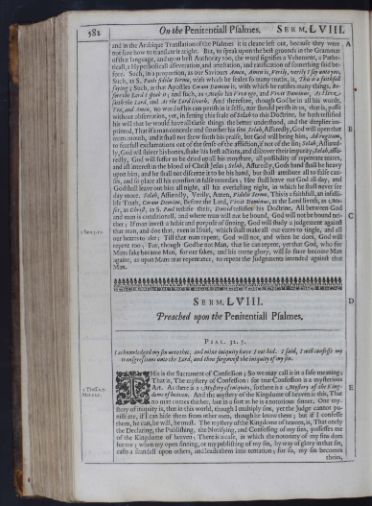 582
On the Penitentiall Psalmes.
Serm. LVIII.
and in the Arabique Translation of the Psalmes it is cleane left out, because they were
582
On the Penitentiall Psalmes.
Serm. LVIII.
and in the Arabique Translation of the Psalmes it is cleane left out, because they were
not sure how to translate it aright. But, to speak upon the best grounds in the Grammar
of that language, and upon best Authority too, the word signifies a Vehement, a Pathe-
ticall, a Hyperbolicall asseveration, and attestation, and ratification of something said be-
fore. Such, in a proportion, as our Saviours Amen, Amen is, Verily, verily I say unto you;
Such, as S. Pauls fidelis Sermo, with which he seales so many truths, is, This is a faithfull
saying; Such, as that Apostles Coram Domino is, with which he ratifies many things, Be-
fore the Lord I speak it; and such, as Moses his Vivo ego, and Vivit Dominus, As I live
saith the Lord, and As the Lord liveth. And therefore, though God be in all his words,
Yea, and Amen, no word of his can perish in it selfe, nor should perish in us, that is, passe
without observation, yet, in setting this seale of Selah to this Doctrine, he hath testified
his will that he would have all these things the better understood, and the deeplier im-
printed, That if a man conceale and smother his sins, Selah, Assuredly, God will open that
mans mouth, and it shall not shew forth his praise, but God will bring him, Ad rugitum,
to fearfull exclamations out of the sense of the affliction, if not of the sin; Selah, Assured-
ly, God wil shiver his bones, shake his best actions, and discover their impurity; Selah, assu-
redly, God will suffer to be dried up all his moysture, all possibility of repentant teares,
and all interest in the blood of Christ Jesus; Selah, Assuredly, Gods hand shall be heavy
upon him, and he shall not discerne it to be his hand, but shall attribute all to false cau-
ses, and so place all his comfort in false remedies; Hee shall leave out God all day, and
God shall leave out him all night, all his everlasting night, in which he shall never see
day more. Selah, Assuredly, Verily, Amen, Fidelis Sermo, This is a faithfull, an infalli-
ble Truth, Coram Domino, Before the Lotd, Vivit Dominus, as the Lord liveth, as Mo-
ses, as Christ, as S. Paul testifie their, David testifies his Doctrine, All between God
and man is conditionall, and where man will not be bound, God will not be bound nei-
ther; If man invest a habit and purpose of sinning, God will study a judgement against
that man, 1. Sam 3.11. and doe that, even in Israel, which shall make all our eares to tingle, and all
our hearts to ake; Till that man repent, God will not, and when he does, God will
repent too; For, though God be not Man, that he can repent, yet that God, who for
Mans sake became Man, for our sakes, and his owne glory, will so farre become Man
againe, as upon Mans true repentance, to repent the Judgements intended against that
Man.
Serm. LVIII.
Preached upon the Penitentiall Psalmes.
Psal. 32.5.
I acknowledged my sin unte thee, and mine iniquity have I not hid. I said, I will confesse my
transgressions unto the Lord, and thou forgavest the iniquity of my sin.
THisThis is the Sacrament of Confession; So we may call it in a safe meaning;
That is, The mystery of Confession: for true Confession is a mysterious
Art.2. Thess. 2.7.
Mat. 22.1. As there is a Mystery of iniquity, so there is a Mystery of the King-
dome of heaven. And the mystery of the Kingdome of heaven is this, That
no man comes thither, but in a sort as he is a notorious sinner. One my-
stery of iniquity is, that in this world, though I multiply sins, yet the Judge cannot pu-
nish me, if I can hide them from other men, though he know them; but if I confesse
them, he can, he will, he must. The mystery ofthe Kingdome of heaven, is, That onely
the Declaring, the Publishing, the Notifying, and Confessing of my sins, possesses me
of the Kingdome of heaven; There is a case, in which the notoriety of my sins does
harme; when my open sinning, or my publishing of my sin, by way of glory in that sin,
casts a scandall upon others, and leads them into tentation; for so, my sin becomes theirs,
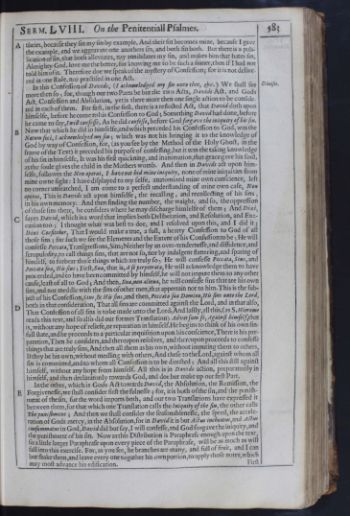 Serm. LVIII.
On the Penitentiall Psalmes.
583
theirs, because they sin my sin by example, And their sin becomes mine, because I gave
Serm. LVIII.
On the Penitentiall Psalmes.
583
theirs, because they sin my sin by example, And their sin becomes mine, because I gave
the example, and we aggravate one anothers sin, and both sin both. But there is a pub-
lication of sin, that both alleviates, nay annihilates my sin, and makes him that hates sin,
Almighty God, love me the better, for knowing me to be such a sinner, then if I had not
told him of it. Therefore doe we speak of the mystery of Confession; for it is not delive-
red in one Rule, nor practised in one Act.
In this Confession of Davids,Divisio. (I acknowledged my sin unto thee, &c.) We shall see
more then so; for, though our two Parts be but the two Acts, Davids Act, and Gods
Act, Confession and Absolution, yet is there more then one single action to be conside-
red in each of them. For first, in the first, there is a reflected Act, that David doth upon
himselfe, before he come to his Confession to God; Something David had done, before
he came to say, I will confesse, As he did confesse, before God forgave the iniquity of his sin.
Now that which he did in himselfe, and which preceded his Confession to God, was the
Notum feci, I acknowledged my sin; which was not his bringing it to the knowledge of
God by way of Confession, for, (as you see by the Method of the Holy Ghost, in the
frame of the Text) it preceded his purpose of confessing, but it was the taking knowledge
of his sin in himselfe, It was his first quickning, and inanimation, that grace gave his soul,
as the soule gives the child in the Mothers womb. And then in Davids act upon him-
selfe, followes the Non operui, I have not hid mine iniquity, none of mine iniquities from
mine owne sight: I have displayed to my selfe, anatomized mine own conscience, left
no corner unsearched, I am come to a perfect understanding of mine own case, Non
operui, This is Davids act upon himselfe, the recalling, and recollecting of his sins,
in his own memory. And then finding the number, the waight, and so, the oppression
of those sins there, he considers where he may discharge himselfe of them; And Dixi,
sayes David, which is a word that implies both Deliberation, and Resolution, and Exe-
cution too; I thought what was best to doe, and I resolved upon this, and I did it;
Dixi Confitebor, That I would make a true, a full, a hearty Confession to God of all
those sins; for such we see the Elements and the Extent of his Confession to be; He will
confesse Peccata, Transgressions, Sins; Neither by an over-tendernesse, and diffidence, and
scrupulosity, to call things sins, that are not so, nor by indulgent flattering, and sparing of
himself, to forbear those things which are truly so; He will confesse Peccata, Sins, and
Peccata sua, His sins; First, Sua, that is, A se perpetrata, He will acknowledge them to have
proceeded, and to have been committed by himself, he will not impute them to any other
cause, least of all to God; And then, Sua, non aliena, he will confesse sins that are his own
sins, and not meddle with the sins of other men, that appertain not to him. This is the sub-
ject of his Confession, Sins, & His sins, and then, Peccata sua Domino, His sins unto the Lord,
both in that consideration, That all sins are committed against the Lord, and in that also,
That Confession of all sins is to be made unto the Lord; And lastly, all this, (as S. Hierome
reads this text, and so also did our former Translation) Adversum se, Against himself, that
is, without any hope of reliefe, or reparation in himself. He begins to think of his own sin-
full state, and he proceeds to a particular inquisition upon his conscience, There is his pre-
paration, Then he considers, and thereupon resolves, and thereupon proceeds to confesse
things that are truly sins, And then all them as his own, without imputing them to others,
If they be his own, without medling with others, And these to the Lord, against whom all
sin is committed, and to whom all Confession is to be directed; And all this still against
himself, without any hope from himself. All this is in Davids action, preparatorily in
himself, and then declaratorily towards God, and doe but make up our first Part.
In the other, which is Gods Act towards David, the Absolution, the Remission, the
Forgivenesse, we shall consider first the fulnesse; for, it is both of the sin, and the punish-
ment of the sin, for the word imports both, and our two Translations have expressed it
between them, for that which one Translation calls the Iniquity of the sin, the other calls
The punishment; And then we shall consider the seasonablenesse, the speed, the accele-
ration of Gods mercy, in the Absolution, for in David it is but Actus inchoatus, and Actus
consummat as in God, David did but say, I will confesse, and God forgave the iniquity, and
the punishment of his sin. Now as this Distribution is Paraphrase enough upon the text,
so a little larger Paraphrase upon every piece of the Paraphrase, will be as much as will
fall into this exercise. For, as you see, he branches are many, and full of fruit, and I can
but shake them, and leave every one to gather his own portion, to apply those notes, which
may most advance his edification. First
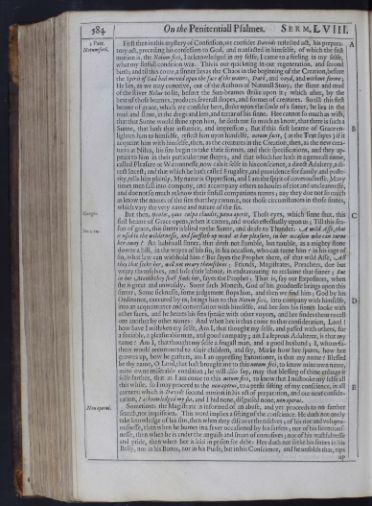 584
On the Penitentiall Psalmes.
Serm. LVIII.
584
On the Penitentiall Psalmes.
Serm. LVIII.
First then in this mystery of Confession, 1 Part.
Notum feci. we consider Davids reflected act, his prepara-
tory act, preceding his confession to God, and transacted in himselfe, of which the first
motion is, the Notum feci, I acknowledged in my selfe, I came to a feeling in my selfe,
what my sinfull condition was. This is our quickning in our regeneration, and second
birth; and til this come, a sinner lies as the Chaos in the beginning of the Creation, before
the Spirit of God had moved upon the face of the waters, Dark, and voyd, and without forme;
He lies, as we may conceive, out of the Authors of Naturall Story, the slime and mud
of the River Nilus to lie, before the Sun-beames strike upon it; which after, by the
heat of those beames, produces severall shapes, and formes of creatures. So till this first
beame of grace, which we consider here, strike upon the soule of a sinner, he lies in the
mud and slime, in the dregs and lees, and tartar of his sinne. Hee cannot so much as wish,
that that Sunne would shine upon him, he doth not so much as know, that there is such a
Sunne, that hath that influence, and impression; But if this first beame of Grace en-
lighten him to himselfe, reflect him upon himselfe, notum facit, (as the Text sayes) if it
acquaint him with himselfe, then, as the creatures in the Creation, then, as the new crea-
tures at Nilus, his sins begin to take their formes, and their specifications, and they ap-
peare to him in their particular true shapes, and that which hee hath in a generall name,
called Pleasure or Wantonnesse, now cals it selfe in his conscience, a direct Adultery, a di-
rect Incest; and that which he hath called Frugality, and providence for family and poste-
rity, tells him plainly, My name is Oppression, and I am the spirit of covetousnesse. Many
times men fall into company, and accompany others to houses of riot and uncleannesse,
and doe not so much as know their sinfull companions names; nay they doe not so much
as know the names of the sins that they commit, nor those circumstances in those sinnes,
which vary the very name and nature of the sin.
But then, Gregor. Oculos, quos culpa claudit, pœna aperit, Those eyes, which sinne shut, this
first beame of Grace opens, when it comes, and works effectually upon us; Till this sea-
son of grace, Ier. 2.24. this sinner is blind to the Sunne, and deafe to Thunder. A wild Asse, that
is used to the wildernesse, and snuffeth up wind at her pleasure, in her occasion who can turne
her away? An habituall sinner, that doth not stumble, but tumble, as a mighty stone
downe a hill, in the wayes of his sin, in his occasion, who can turne him? in his rage of
sin, what law can withhold him? But sayes the Prophet there, of that wild Asse, All
they that seeke her, will not weary themselves; Friends, Magistrates, Preachers, doe but
weary themselves, and lose their labour, in endeavouring to reclaime that sinner; But
in her Month they shall finde her, sayes the Prophet; That is, say our Expositors, when
she is great and unweildy. Some such Moneth, God of his goodnesse brings upon this
sinner; Some sicknesse, some judgement stops him, and then we find him; God by his
Ordinance, executed by us, brings him to this Notum feci, into company with himselfe,
into an acquaintance and conversation with himselfe, and hee sees his sinnes looke with
other faces, and he heares his sins speake with other voyces, and hee findes then to call
one another by other names: And when hee is thus come to that consideration, Lord!
how have I mistaken my selfe, Am I, that thought my selfe, and passed with others, for
a sociable, a pleasurable man, and good company; am I a leprous Adulterer, is that my
name? Am I, that thought my selfe a frugall man, and a good husband; I, whom fa-
thers would recommend to their children, and say, Marke how hee spares, how hee
growes up, how he gathers, am I an oppressing Extortioner, is that my name? Blessed
be thy name, O Lord, that hast brought me to this notum feci, to know mine own name,
mine owne miserable condition; he will also say, may that blessing of thine enlarge it
selfe farther, that as I am come to this notum feci, to know that I mistooke my selfe all
this while, so I may proceed to the non operui, to a perfit sifting of my conscience, in all
corners: which is Davids second motion in his act of preparation, and our next conside-
ration, I acknowledged my sin, and I hid none, disguised none, non operui.
Sometimes the Magistrate is informed of an abuse, Non operui. and yet proceeds to no farther
search, nor inquisition. This word implies a sifting of the conscience. He doth not onely
take knowledge of his sins, then when they discover themselves; of his riot and voluptu-
ousnesse, then when he burnes in a fever occasioned by his surfets; nor of his licentious-
nesse, then when he is under the anguish and smart of corrosives; nor of his wastfulnesse
and pride, then when hee is laid in prison for debt: Hee doth not seeke his sinnes in his
Belly, nor in his Bones, nor in his Purse, but in his Conscience, and he unfolds that, rips up
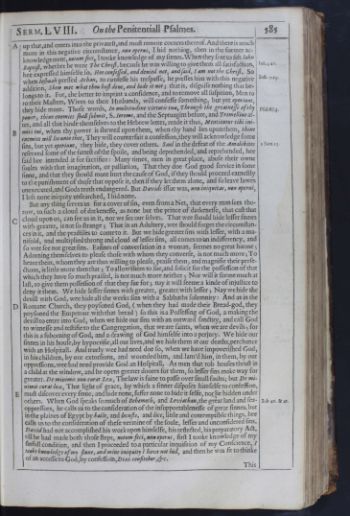 Serm. LVIII.
On the Penitentiall Psalmes.
585
up that, and enters into the privatest, and most remote corners thereof. And there is much
Serm. LVIII.
On the Penitentiall Psalmes.
585
up that, and enters into the privatest, and most remote corners thereof. And there is much
more in this negative circumstance, non operui, I hid nothing, then in the former ac-
knowledgement, notum feci, I tooke knowledge of my sinnes. When they sent to sift Iohn
Baptist, whether he were The Christ, because he was willing to give them all satisfaction,
Ioh. 1.20. hee expressed himselfe so, Hee confessed, and denied not, and said, I am not the Christ. So
when Ioshuah pressed Achan, to confesse his trespasse, Iosh. 7.19. he presses him with this negative
addition, Shew mee what thou hast done, and hide it not; that is, disguise nothing that be-
longs to it. For, the better to imprint a confidence, and to remove all suspition, Men to
to their Masters, Wives to their Husbands, will confesse something, but yet operiunt,
they hide more. Those words, In multitudine virtutis tuæ,Psal. 66.3. Through the greatnesse of thy
power, thine enemies shall submit, S. Ierome, and the Septuagint before, and Tremellius af-
ter, and all that binde themselves to the Hebrew letter, reade it thus, Mentientur tibi ini-
mici tui, when thy power is shewed upon them, when thy hand lies upon them, thine
enemies will lie unto thee, They will counterfait a confession, they will acknowledge some
sins, but yet operiunt, they hide, they cover others.1 Sam. 15. Saul in the defeat of the Amalekites
reserved some of the fattest of the spoile, and being deprehended, and reprehended, hee
said hee intended it for sacrifice: Many times, men in great place, abuse their owne
soules with that imagination, or palliation, That they doe God good service in some
sinne, and that they should more hurt the cause of God, if they should proceed earnestly
to the punishment of those that oppose it, then if they let them alone, and so leave lawes
unexecuted, and Gods truth endangered. But Davids issue was, non iniquitas, non operui,
I left none iniquity unsearched, I hid none.
But any thing serves us for a cover of sin, even from a Net, that every man sees tho-
row, to such a cloud of darkenesse, as none but the prince of darkenesse, that cast that
cloud upon us, can see us in it, nor we see our selves. That wee should hide lesser sinnes
with greater, is not so strange; That in an Adultery, wee should forget the circumstan-
ces in it, and the practises to come to it. But we hide greater sins with lesser, with a ma-
nifold, and multiplied throng and cloud of lesser sins, all comes to an indifferency, and
so wee see not great sins. Easines of conversation in a woman, seemes no great harme;
Adorning themselves to please those with whom they converse, is not much more; To
heare them, whom they are thus willing to please, praise them, and magnifie their perfe-
ctions, is little more then that; To allow them to sue, and solicit for the possession of that
which they have so much praised, is not much more neither; Nor will it seeme much at
last, to give them possession of that they sue for; nay it will seeme a kinde of injustice to
deny it them. We hide lesser sinnes with greater, greater with lesser; Nay we hide the
devill with God, wee hide all the weeks sins with a Sabbaths solemnity: And as in the
Romane Church, they poysoned God, (when they had made their Bread-god, they
poysoned the Emperour with that bread) so this is a Possessing of God, a making the
devill to enter into God, when we hide our sins with an outward sanctity, and call God
to witnesse and testifie to the Congregation, that we are saints, when we are devils; for
this is a suborning of God, and a drawing of God himselfe into a perjury. We hide our
sinnes in his house, by hypocrisie, all our lives, and we hide them at our deaths, perchance
with an Hospitall. And truely wee had need doe so, when we have impoverished God,
in his children, by our extorsions, and wounded him, and lam'd him, in them, by our
oppressions, wee had need provide God an Hospitall. As men that rob houses thrust in
a child at the window, and he opens greater doores for them, so lesser sins make way for
greater. De minimis non curat Lex, The law is faine to passe over small faults; but De mi-
nimis cur at lux, That light of grace, by which a sinner disposes himselfe to confession,
must discover every sinne, and hide none, suffer none to hide it selfe, nor lie hidden under
others. When God speaks so much of Behemoth, and Leviathan,Iob 40. & 41. the great land and sea-
oppressors, he calls us to the consideration of the insupportablenesse of great sinnes; but
in the plaines of Egypt by haile, and locusts, and lice, little and contemptible things, hee
calls us to the consideration of these vermine of the soule, lesser and unconsidered sins.
David had not accomplished his work upon himselfe, his reflected, his preparatory Act,
till he had made both those steps, notum feci, non operui, first I tooke knowledge of my
sinfull condition, and then I proceeded to a particular inquisition of my Conscience, I
tooke knowledge of my sinne, and mine iniquity I have not hid, and then he was fit to thinke
of an accesse to God, by confession, Dixi confitebor, &c. This
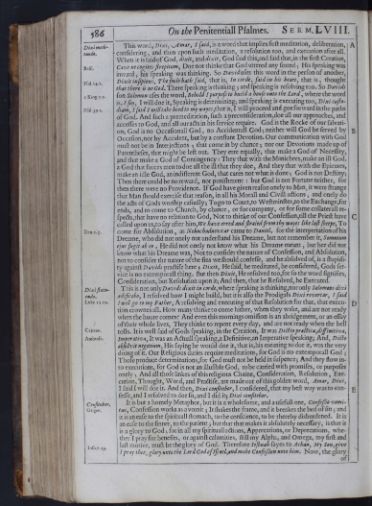 586
On the Penitentiall Psalmes.
Serm. LVIII.
586
On the Penitentiall Psalmes.
Serm. LVIII.
This word, Dixi medi-
tando. Dixi, Amar, I said, is a word that implies first meditation, deliberation,
considering, and then upon such meditation, a resolution too, and execution after all.
When it is said of God, dixit, and dixit, God said this, and said that, in the first Creation,
Cave ne cogites strepitum,Basil. Doe not thinke that God uttered any sound; His speaking was
inward, his speaking was thinking. So David uses this word in the person of another,
Dixit insipiens,Psal. 14.1. The foole hath said, that is, In corde, said in his heart, that is, thought
that there is no God. There speaking is thinking; and speaking is resolving too. So Davids
son Solomon uses the word, 1 King. 5.5. Behold I purpose to build a house unto the Lord, where the word
is, I say, I will doe it, Speaking is determining; and speaking is executing too, Dixi custo-
diam, I said I will take heed to my wayes,Psal. 39.1. that is, I will proceed and goe forward in the paths
of God. And such a premeditation, such a preconsideration, doe all our approaches, and
accesses to God, and all our acts in his service require. God is the Rocke of our salvati-
on; God is no Occasionall God, no Accidentall God; neither will God be served by
Occasion, nor by Accident, but by a constant Devotion. Our communication with God
must not be in Interjections; that come in by chance; nor our Devotions made up of
Parentheses, that might be left out. They erre equally, that make a God of Necessity,
and that make a God of Contingency: They that with the Manichees, make an ill God,
a God that forces men to doe all the ill that they doe, And they that with the Epicures,
make an idle God, an indifferent God, that cares not what is done; God is not Destiny;
Then there could be no reward, nor punishment: but God is not Fortune neither, for
then there were no Providence. If God have given reason onely to Man, it were strange
that Man should exercise that reason, in all his Morall and Civill actions, and onely do
the acts of Gods worship casually; To go to Court, to Westminster, to the Exchange, for
ends, and to come to Church, by chance, or for company, or for some collaterall re-
spects, that have no relation to God, Not to thinke of our Confession, till the Priest have
called upon us, to say after him, We have erred and straied from thy wayes like lost sheepe, To
come for Absolution, Dan. 2.3. as Nebuchadnezzar came to Daniel, for the interpretation of his
Dreame, who did not onely not understand his Dreame, but not remember it, Somnium
ejus fugit ab eo, He did not onely not know what his Dreame meant, but hee did not
know what his Dreame was, Not to consider the nature of Confession, and Absolution,
not to consider the nature of the sins we should confesse, and be absolved of, is a stupidi-
ty against Davids practise here; Dixit, He said, he meditated, he considered, Gods ser-
vice is no extemporall thing. But then Dixit, He resolved too, for so the word signifies,
Consideration, but Resolution upon it; And then, that he Resolved, he Executed.
This is not only Davids dixit in corde,Dixi statu-
endo.
Luke 15.12. where speaking is thinking, nor only Solomons dixi
adificabo, I resolved how I might build, but it is also the Prodigals Dixi revertar, I said
I will go to my Father, A resolving and executing of that Resolution for that, that execu-
tion crownes all. How many thinke to come hither, when they wake, and are not ready
when the houre comes? And even this mornings omission is an abridgement, or an essay
of their whole lives, They thinke to repent every day, and are not ready when the bell
tolls.Cajetan. It is well said of Gods speaking, in the Creation, It was Dictio practica, diffinitiva,
Imperativa,Ambrose. It was an Actuall speaking, a Definitive, an Imperative speaking; And, Dicto
absolvit negotium, His saying he would doe it, that is, his meaning to doe it, was the very
doing of it. Our Religious duties require meditations, for God is no extemporall God;
Those produce determinations, for God must not be held in suspence; And they flow in-
to executions, for God is not an illusible God, to be carried with promises, or purposes
onely; And all those linkes of this religious Chaine, Consideration, Resolution, Exe-
cution, Thought, Word, and Practise, are made out of this golden word, Amar, Dixi,
I said I will doe it. And then, Dixi confitebor, I considered, that my best way was to con-
fesse, and I resolved to doe so, and I did it; Dixi confitebor.
It is but a homely Metaphor, Confitebor.
Origen. but it is a wholesome, and a usefull one, Confessio vomi-
tus, Confession works as a vomit; It shakes the frame, and it breakes the bed of sin; and
it is an ease to the spirituall stomach, to the conscience, to be thereby disburdened. It is
an ease to the sinner, to the patient; but that that makes it absolutely necessary, is that it
is a glory to God; for in all my spirituall actions, Apprecations, or Deprecations, whe-
ther I pray for benefits, or against calamities, still my Alpha, and Omega, my first and
last motive, Iosh. 7.19. must be the glory of God. Therefore Ioshuah sayes to Achan, My Son, give
I pray thee, glory unto the Lord God of Israel, and make Confession unto him. Now, the glory of
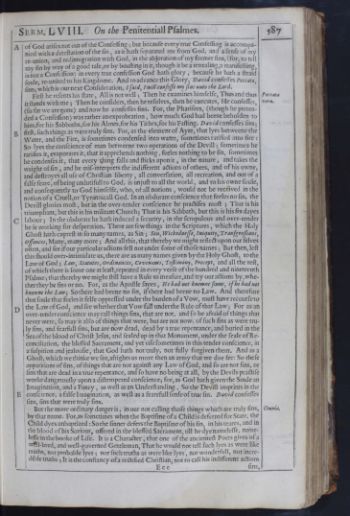 Serm. LVIII.
On the Penitentiall Psalmes.
587
of God arises not out of the Confessing; but because every true Confessing is accompa-
Serm. LVIII.
On the Penitentiall Psalmes.
587
of God arises not out of the Confessing; but because every true Confessing is accompa-nied with a detestation of the sin, as it hath separated me from God, and a sense of my
re-union, and redintegration with God, in the abjuration of my former sins, (for, to tell
my sin by way of a good tale, or by boasting in it, though it be a revealing, a manifesting,
is not a Confession) in every true confession God hath glory, because he hath a straid
soule, re-united to his Kingdome. And to advance this Glory, David confesses Peccata,
sins; which is our next Consideration, I said, I will confesse my sins unto the Lord.
First he resents his state, All is not well; Then he examines himselfe, Peccata
vera. Thus and thus
it stands with me; Then he considers, then he resolves, then he executes, He confesses,
(so far we are gone) and now he confesses sins. For, the Pharisees, (though he preten-
ded a Confession) was rather an exprobration, how much God had beene beholden to
him, for his Sabbaths, for his Almes, for his Tithes, for his Fasting. David confesses sins;
first, such things as were truly sins. For, as the element of Ayre, that lyes betweene the
Water, and the Fire, is sometimes condensed into water, sometimes rarified into fire:
So lyes the conscience of man betweene two operations of the Devill; sometimes he
rarifies it, evaporates it, that it apprehends nothing, feeles nothing to be sin, sometimes
he condenses it, that every thing falls and sticks upon it, in the nature, and takes the
waight of sin, and he mis-interprets the indifferent actions of others, and of his owne,
and destroyes all use of Christian liberty, all conversation, all recreation, and out of a
false feare, of being undutifull to God, is unjust to all the world, and to his owne soule,
and consequently to God himselfe, who, of all notions, would not be received in the
notion of a Cruell, or Tyrannicall God. In an obdurate conscience that feeles no sin, the
Devill glories most, but in the over-tender conscience he practises most; That is his
triumphant, but this is his militant Church; That is his Sabbath, but this is his six dayes
labour; In the obdurate he hath induced a security, in the scrupulous an over-tender
he is working for desperation. There are a few things in the scriptures, which the Holy
Ghost hath exprest in so many names, as Sin; Sin, Wickednesse, Iniquity, Transgressions,
Offences, Many, many more; And all this, that thereby we might reflect upon our selves
often, and see if our particular actions fell not under some of those names; But then, lest
this should over-intimidate us, there are as many names given by the Holy Ghost, to the
Law of God; Law, Statutes, Ordinances, Covenants, Testimony, Precept, and all the rest,
of which there is some one at least, repeated in every verse of the hundred and nineteenth
Psalme; that thereby we might still have a Rule to measure, and try our actions by, whe-
ther they be sins or no. For, as the Apostle sayes, He had not knowne sinne, if he had not
knowne the Law; So there had beene no sin, if there had beene no Law. And therefore
that soule that feeles it selfe oppressed under the burden of a Vow, must have recourse to
the Law of God, and see whether that Vow fall under the Rule of that Law; For as an
over-tender conscience may call things sins, that are not, and so be afraid of things that
never were, so may it also of things that were, but are not now; of such sins as were tru-
ly sins, and fearfull sins, but are now dead, dead by a true repentance, and buried in the
Sea of the blood of Christ Jesus, and sealed up in that Monument, under the seale of Re-
conciliation, the blessed Sacrament, and yet rise sometimes in this tender conscience, in
a suspition and jealousie, that God hath not truly, not fully forgiven them. And as a
Ghost, which we thinke we see, afrights us more then an army that we doe see: So these
apparitions of sins, of things that are not against any Law of God, and so are not sins, or
sins that are dead in a true repentance, and so have no being at all, by the Devils practise
worke dangerously upon a distempered conscience; for, as God hath given the Soule an
Imagination, and a Fancy, as well as an Understanding, So the Devill imprints in the
conscience, a false Imagination, as well as a fearefull sense of true sin. David confesses
sins, sins that were truly sins.
But the more ordinary danger is, Omnia. in our not calling those things which are truly sins,
by that name. For, as sometimes when the Baptisme of a Child is deferred for State, the
Child dyes unbaptized: So the sinner defers the Baptisme of his sin, in his teares, and in
the blood of his Saviour, offered in the blessed Sacrament, till he dye namelesse, name-
lesse in the booke of Life. It is a Character, that one of the ancientest Poets gives of a
well-bred, and well-governed Gentleman, That he would not tell such lyes as were like
truths, not probable lyes; nor such truths as were like lyes, not wonderfull, not incre-
dible truths; It is the constancy of a rectified Christian, not to call his indifferent actions Eee sins,
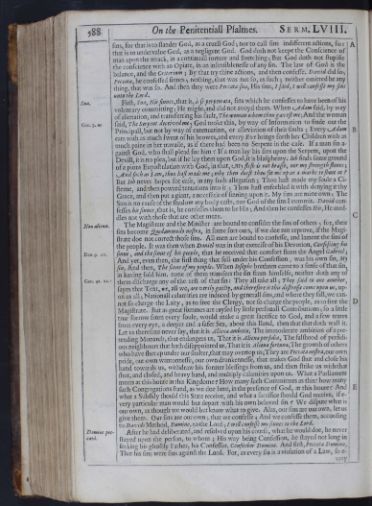 588
On the Penitentiall Psalmes.
Serm. LVIII.
sins, for that is to slander God, as a cruell God; nor to call sins indifferent actions, for
588
On the Penitentiall Psalmes.
Serm. LVIII.
sins, for that is to slander God, as a cruell God; nor to call sins indifferent actions, for
that is to undervalue God, as a negligent God. God doth not keepe the Conscience of
man upon the wrack, in a continuall torture and stretching; But God doth not stupifie
the conscience with an Opiate, in an insensiblenesse of any sin. The law of God is the
balance, and the Criterium; By that try thine actions, and then confesse. David did so;
Peccata, he confessed sinnes; nothing, that was not so, as such; neither omitted he any
thing, that was so. And then they were Peccata sua, His sins, I said, I will confesse my sins
unto the Lord.
First, Sua. Sua, His sinnes, that is, à se perpetrata, sins which he confesses to have been of his
voluntary committing; He might, and did not avoyd them. When Adam said, by way
of alienation, and transferring his fault, The woman whom thou gavest me; And the woman
said, Gen. 3.12. The Serpent deceived me; God tooke this, by way of Information to finde out the
Principall, but not by way of extenuation, or alleviation of their faults; Every Adam
eats with as much sweat of his browes, and every Eve brings forth her Children with as
much paine in her travaile, as if there had been no Serpent in the case. If a man sin a-
gainst God, who shall plead for him? If a man lay his sins upon the Serpent, upon the
Devill, it is no plea, but if he lay them upon God, it is blasphemy. Iob finds some ground
of a pious Expostulation with God, in that, My flesh is not brasse, nor my strength stones;
And such as I am, thou hast made me; why then doest thou set me up as a marke to shoot at?
But Iob never hopes for ease, in any such allegation; Thou hast made my soule a Ci-
sterne, and then powred tentations into it; Thou hast enfeebled it with denying it thy
Grace, and then put a giant, a necessitie of sinning upon it. My sins are mine own; The
Sun is no cause of the shadow my body casts, nor God of the sins I commit. David con-
fesses his sinnes, that is, he confesses them to be His; And then he confesses His, He med-
dles not with those that are other mens.
The Magistrate and the Minister are bound to consider the sins of others;Non aliena. for, their
sins become Quodammodo nostra, in some sort ours, if we doe not reprove, if the Magi-
strate doe not correct those sins. All men are bound to confesse, and lament the sins of
the people. It was then when Daniel was in that exercise of his Devotion, Confessing his
sinne,Dan. 9.20. and the sinne of his people, that he received that comfort from the Angel Gabriel;
And yet, even then, the first thing that fell under his Confession, was his own sin, My
sin, And then, The sinne of my people. When Iosephs brethren came to a sense of that sin,
in having sold him, none of them transfers the sin from himselfe, neither doth any of
them discharge any of the rest of that sin:Gen. 42.21. They all take all; They said to one another,
sayes that Text, we, all we, are verily guilty, and therefore is this distresse come upon us, up-
on us all; Nationall calamities are induced by generall sins, and where they fall, we can-
not so charge the Laity, as to free the Clergy, nor so charge the people, as to free the
Magistrate. But as great summes are raysed by little personall Contributions; so a little
true sorrow from every soule, would make a great sacrifice to God, and a few teares
from every eye, a deeper and a safer Sea, about this Iland, then that that doth wall it.
Let us therefore never say, that it is Aliena ambitio, The immoderate ambition of a pre-
tending Monarch, that endangers us, That it is Aliena perfidia, The falshood of perfidi-
ous neighbours that hath disappointed us, That it is Aliena fortuna, The growth of others
who have shot up under our shelter, that may overtop us; They are Peccata nostra, our own
pride, our own wantonnesse, our own drunkennesse, that makes God shut and close his
hand towards us, withdraw his former blessings from us, and then strike us with that
shut, and closed, and heavy hand, and multiply calamities upon us. What a Parliament
meets at this houre in this Kingdome? How many such Committees as this? how many
such Congregations stand, as we doe here, in the presence of God, at this houre? And
what a Subsidy should this State receive, and what a sacrifice should God receive, if e-
very particular man would but depart with his own beloved sin? We dispute what is
our own, as though we would but know what to give. Alas, our sins are our own, let us
give them. Our sins are our own; that we confesse; And we confesse them, according
to Davids Method, Domino, to the Lord; I will confesse my sinnes to the Lord.
After he had deliberated, Domino pec-
cavi. and resolved upon his course, what he would doe, he never
stayed upon the person, to whom; His way being Confession, he stayed not long in
seeking his ghostly Father, his Confessor, Confitebor Domino. And first, Peccata Domino,
That his sins were sins against the Lord. For, as every sin is a violation of a Law, so e-
very
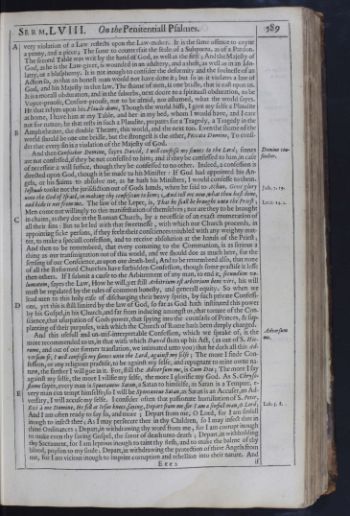 Serm. LVIII.
On the Penitentiall Psalmes.
589
very violation of a Law reflects upon the Law-maker. It is the same offence to coyne
Serm. LVIII.
On the Penitentiall Psalmes.
589
very violation of a Law reflects upon the Law-maker. It is the same offence to coyne
a penny, and a piece; The same to counterfait the seale of a Subpoena, as of a Pardon.
The second Table was writ by the hand of God, as well as the first; And the Majesty of
God, as he is the Law-giver, is wounded in an adultery, and a theft, as well as in an Ido-
latry, or a blasphemy. It is not inough to consider the deformity and the foulnesse of an
Action so, as that an honest man would not have done it; but so as it violates a law of
God, and his Majesty in that law. The shame of men, is one bridle, that is cast upon us.
It is a morall obduration, and in the suburbs, next doore to a spirituall obduration, to be
Voyce-proofe, Censure-proofe, not to be afraid, nor ashamed, what the world sayes.
He that relyes upon his Plaudo domi, Though the world hisse, I give my selfe a Plaudite
at home, I have him at my Table, and her in my bed, whom I would have, and I care
not for rumor; he that rests in such a Plaudite, prepares for a Tragedy, a Tragedy in the
Amphitheater, the double Theater, this world, and the next too. Even the shame of the
world should be one one bridle, but the strongest is the other, Peccata Domino, To consi-
der that every sin is a violation of the Majesty of God.
And then Confitebor Domino, sayes David, I will confesse my sinnes to the Lord;Domino con-
fitebor. sinnes
are not confessed, if they be not confessed to him; and if they be confessed to him, in case
of necessitie it will suffice, though they be confessed to no other. Indeed, a confession is
directed upon God, though it be made to his Minister: If God had appointed his An-
gels, or his Saints to absolve me, as he hath his Ministers, I would confesse to them.
Ioshuah tooke not the jurisdiction out of Gods hands, when he said to Achan,Josh. 7.19. Give glory
unto the God of Israel, in making thy confession to him; And tell me now, what thou hast done,
and hide it not from me.Levit. 14.2. The law of the Leper, is, That he shall be brought unto the Priest;
Men come not willingly to this manifestation of themselves; nor are they to be brought
in chains, as they doe in the Roman Church, by a necessitie of an exact enumeration of
all their sins: But to be led with that sweetnesse, with which our Church proceeds, in
appointing sicke persons, if they seele their consciences troubled with any weighty mat-
ter, to make a speciall confession, and to receive absolution at the hands of the Priest;
And then to be remembred, that every comming to the Communion, is as serious a
thing as our transmigration out of this world, and we should doe as much here, for the
settling of our Conscience, as upon our death-bed; And to be remembred also, that none
of all the Reformed Churches have forbidden Confession, though some practise it lesse
then others. If I submit a cause to the Arbitrement of any man, to end it, secundùm vo-
luntatem, sayes the Law, How he will, yet still Arbitrium est arbitrium boni viri, his will
must be regulated by the rules of common honesty, and generall equity. So when we
lead men to this holy ease of discharging their heavy spirits, by such private Confessi-
ons, yet this is still limited by the law of God, so far as God hath instituted this power
by his Gospel, in his Church, and far from inducing amongst us, that torture of the Con-
science, that usurpation of Gods power, that spying into the counsails of Princes, & sup-
planting of their purposes, with which the Church of Rome hath been deeply charged.
And this usefull and un-mis-interpretable Confession, which we speake of, Adversum
me. is the
more recommended to us, in that with which David shuts up his Act, (as out of S. Hie-
rome, and out of our former translation, we intimated unto you) that he doth all this Ad-
versum se, I will confesse my sinnes unto the Lord, against my selfe; The more I finde Con-
fession, or any religious practise, to be against my selfe, and repugnant to mine owne na-
ture, the farther I will goe in it. For, still the Adversum me, is Cum Deo; The more I say
against my selfe, the more I vilifie my selfe, the more I glorifie my God. As S. Chryso-
stome sayes, every man is Spontaneus Satan, a Satan to himselfe, as Satan is a Tempter, e-
very man can tempt himselfe; so I will be Spontaneus Satan, as Satan is an Accuser, an Ad-
versary, I will accuse my selfe. I consider often that passionate humiliation of S. Peter,
Exi à me Domine, He fell at Iesus knees, saying, Depart from me for I am a sinfull man, O Lord;
Luk. 5.8. And I am often ready to say so, and more; Depart from me, O Lord, for I am sinfull
inough to infect thee; As I may persecute thee in thy Children, so I may infect thee in
thine Ordinances; Depart, in withdrawing thy word from me, for I am corrupt inough
to make even thy saving Gospel, the savor of death unto death; Depart, in withholding
thy Sacrament, for I am leprous inough to taint thy flesh, and to make the balme of thy
blood, poyson to my soule; Depart, in withdrawing the protection of thine Angels from
me, for I am vicious inough to imprint corruption and rebellion into their nature. And Eee2 if
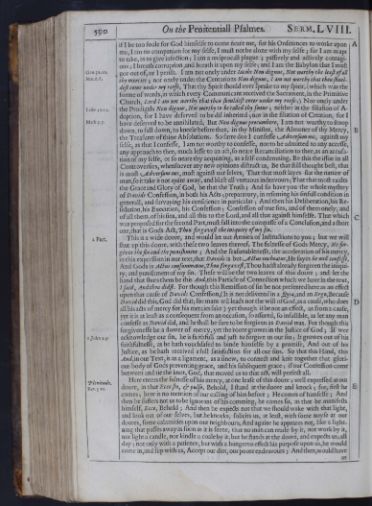 590
On the Penitentiall Psalmes.
Serm. LVIII.
if I be too foule for God himselfe to come neare me, for his Ordinances to worke upon
590
On the Penitentiall Psalmes.
Serm. LVIII.
if I be too foule for God himselfe to come neare me, for his Ordinances to worke upon
me, I am no companion for my selfe, I must not be alone with my selfe; for I am as apt
to take, as to give infection; I am a reciprocall plague; passively and actively contagi-
ous; I breath corruption, and breath it upon my selfe; and I am the Babylon that I must
goe out of, Gen. 32.10.
Mat. 8.8. or I perish. I am not onely under Iacobs Non dignus, Not worthy the least of all
thy mercies; nor onely under the Centurions Non dignus, I am not worthy that thou shoul-
dest come under my roofe, That thy Spirit should ever speake to my spirit, (which was the
forme of words, in which every Communicant received the Sacrament, in the Primitive
Church, Lord I am not worthy that thou shouldest enter under my roofe;) Nor onely under
the Prodigals Non dignus,Luke 15.21. Not worthy to be called thy sonne; neither in the filiation of A-
doption, for I have deserved to be dis-inherited; nor in the filiation of Creation, for I
have deserved to be annihilated;Mark 1.7. But Non dignus procumbere, I am not worthy to stoop
down, to fall down, to kneele before thee, in thy Minister, the Almoner of thy Mercy,
the Treasurer of thine Absolutions. So farre doe I confesse Adversum me, against my
selfe, as that I confesse, I am not worthy to confesse, nor to be admitted to any accesse,
any approach to thee, much lesse to an act, so neare Reconciliation to thee, as an accusa-
tion of my selfe, or so neare thy acquitting, as a self-condemning. Be this the issue in all
Controversies, whensoever any new opinions distract us, Be that still thought best, that
is most Adversum nos, most against our selves, That that most layes flat the nature of
man, so it take it not quite away, and blast all vertuous indeavours; That that most exalts
the Grace and Glory of God, be that the Truth; And so have you the whole mystery
of Davids Confession, in both his Acts; preparatory, in resenting his sinfull condition in
generall, and survaying his conscience in particular; And then his Deliberation, his Re-
solution, his Execution, his Confession; Confession of true sins, and of them onely, and
of all them, of his sins, and all this to the Lord, and all that against himselfe. That which
was proposed for the second Part, must fall into the compasse of a Conclusion, and a short
one, that is Gods Act, Thou forgavest the iniquity of my sin.
This is a wide doore, 2 Part. and would let out Armies of Instructions to you; but we will
shut up this doore, with these two leaves thereof, The fulnesse of Gods Mercy, He for-
gives the sin and the punishment; And the seasonablenesse, the acceleration of his mercy,
in this expression in our text, that Davids is but Actus inchoatus, He sayes he will confesse,
And Gods is Actus consummatus, Thou forgavest, Thou hadst already forgiven the iniqui-
ty, and punishment of my sin. These will be the two leaves of this doore; and let the
hand that shuts them be this And, this Particle of Connection which we have in the text,
I said, And thou didst. For though this Remission of sin be not presented here as an effect
upon that cause of Davids Confession, (It is not delivered in a Quia, and an Ergo, Because
David did this, God did that; for mans wil leads not the will of God, as a cause, who does
all his acts of mercy for his mercies sake) yet though it be not an effect, as from a cause,
yet it is at least as a consequent from an occasion, so assured, so infallible, as let any man
confesse as David did, and he shall be sure to be forgiven as David was. For though this
forgivenesse be a flower of mercy, yet the roote growes in the Justice of God; If wee
acknowledge our sin, 1 John 1.9. he is faithfull and just to forgive us our sin; It growes out of his
faithfulnesse, as he hath vouchsafed to binde himselfe by a promise, And out of his
Justice, as he hath received a full satisfaction for all our sins. So that this Hand, this
And, in our Text, is as a ligament, as a sinew, to connect and knit together that glori-
ous body of Gods preventing grace, and his subsequent grace; if our Confession come
between and tie the knot, God, that moved us to that act, will perfect all.
Here enters the fulnesse of his mercy, Plenitudo.
Rev. 3 20. at one leafe of this doore; well expressed at our
doore, in that Ecce sto, & pulso, Behold, I stand at the doore and knock; for, first he
comes; here is no mention of our calling of him before; He comes of himselfe; And
then he suffers not us to be ignorant of his comming, he comes so, as that he manifests
himself, Ecce, Behold; And then he expects not that we should wake with that light,
and look out of our selves, but he knocks, solicits us, at least, with some noyse at our
doores, some calamities upon our neighbours; And againe he appeares not, like a light-
ning that passes away as soon as it is seene, that no man can reade by it, nor work by it,
nor light a candle, nor kindle a coale by it, but he stands at the doore, and expects us; all
day; not only with a patience, but with a hunger to effect his purpose upon us, he would
come in, and sup with us, Accept our diet, our poore endeavours; And then, would have us
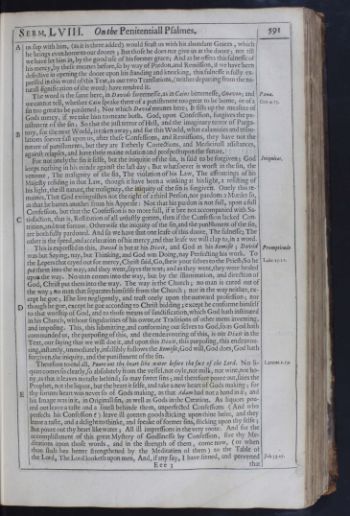 Serm. LVIII.
On the Penitentiall Psalmes.
591
us sup with him, (as it is there added) would feast us with his abundant Graces, which
Serm. LVIII.
On the Penitentiall Psalmes.
591
us sup with him, (as it is there added) would feast us with his abundant Graces, which
he brings even home to our doores; But those he does not give us at the doore; not till
we have let him in, by the good use of his former grace; And as he offers this fulnesse of
his mercy, by these meanes before, so by way of Pardon, and Remission, if we have been
defective in opening the doore upon his standing and knocking, this fulnesse is fully ex-
pressed in this word of this Text, as our two Translations, (neither departing from the na-
turall signification of the word) have rendred it.
The word is the same here, in Davids sweetnesse, as in Cains bitternesse, Gnavon;
Pœna.
Gen 4.13. and we cannot tell, whether Cain speake there of a punishment too great to be borne, or of a
sin too great to be pardoned; Nor which David meanes here; It fills up the measure of
Gods mercy, if we take him to meane both. God, upon Confession, forgives the pu-
nishment of the sin; So that the just terror of Hell, and the imaginary terror of Purga-
tory, for the next World, is taken away; and for this World, what calamities and tribu-
lations soever fall upon us, after these Confessions, and Remissions, they have not the
nature of punishments, but they are Fatherly Corrections, and Medicinall assistances,
against relapses, and have their maine relation and prospect upon the future.
For not onely the sin it selfe, but the iniquitie of the sin, is said to be forgiven;Iniquitas. God
keeps nothing in his minde against the last day; But whatsoever is worst in the sin, the
venome, The malignity of the sin, The violation of his Law, The affrontings of his
Majesty residing in that Law, though it have been a winking at his light, a resisting of
his light, the ill nature, the malignity, the iniquity of the sin is forgiven. Onely this re-
maines, That God extinguishes not the right of a third Person, nor pardons a Murder so,
as that he barres another from his Appeale: Not that his pardon is not full, upon a full
Confession, but that the Confession is no more full, if it bee not accompanied with Sa-
tisfaction, that is, Restitution of all unjustly gotten, then if the Confession lacked Con-
trition, and true sorrow. Otherwise the iniquity of the sin, and the punishment of the sin,
are both fully pardoned. And so we have shut one leafe of this doore, The fulnesse; The
other is the speed, and acceleration of his mercy, and that leafe we will clap to, in a word.
This is expressed in this, David is but at his Dixit, and God at his Remisit; Promptitudo David
was but Saying, nay, but Thinking, and God was Doing, nay Perfecting his work. To
the Lepers that cryed out for mercy, Christ said, Go, shew your selves to the Priest;Luke 17.11. So he
put them into the way; and they went, sayes the text; and as they went, they were healed
upon the way. No man comes into the way, but by the illumination, and direction of
God, Christ put them into the way. The way is the Church; no man is cured out of
the way; no man that separates himselfe from the Church; nor in the way neither, ex-
cept he goe; If he live negligently, and trust onely upon the outward profession; nor
though he goe, except he goe according to Christ bidding; except he conforme himself
to that worship of God, and to those means of sanctification, which God hath instituted
in his Church, without singularities of his owne, or Traditions of other mens inventing,
and imposing. This, this submitting, and conforming our selves to God, so as God hath
commanded us, the purposing of this, and the endeavouring of this, is our Dixit in the
Text, our saying that we will doe it, and upon this Dixit, this purposing, this endeavou-
ring, instantly, immediately, infallibly follows the Remisit, God will, God does, God hath
forgiven, the iniquity, and the punishment of the sin.
Therefore to end all, Poure out thy heart like water before the face of the Lord.Lament. 2.19. No li-
quor comes so clearly, so absolutely from the vessel, not oyle, not milk, not wine, not ho-
ny, as that it leaves no taste behind; so may sweet sins; and therefore poure out, saies the
Prophet, not the liquor, but the heart it selfe, and take a new heart of Gods making; for
thy former heart was never so of Gods making, as that Adam had not a hand in it; and
his Image was in it, in Originall sin, as well as Gods in the Creation. As liquors pou-
red out leave a taste and a smell behinde them, unperfected Confessions (And who
perfects his Confession?) leave ill gottten goods sticking upon thine heire, and they
leave a taste, and a delight to thinke, and speake of former sins, sticking upon thy selfe;
But poure out thy heart like water; All ill impressions in the very roote. And for the
accomplishment of this great Mystery of Godlinesse by Confession, fixe thy Me-
ditations upon those words, and in the strength of them, come now, (or when
thou shalt bee better strengthened by the Meditation of them) to the Table of
the Lord, The Lord looketh upon men, And, if any say, I have sinned, Job 33.27. and perverted Eee3 that
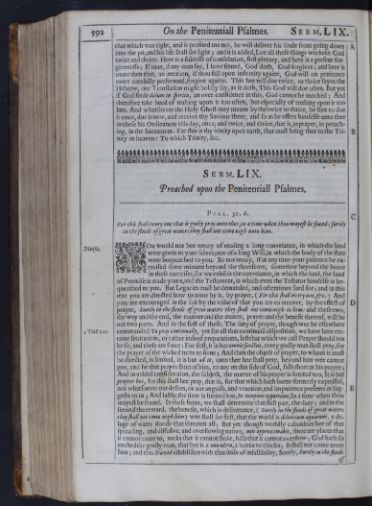 592
On the Penitentiall Psalmes.
Serm. LIX.
that which was right, and it profited me not, he will deliver his soule from going down
592
On the Penitentiall Psalmes.
Serm. LIX.
that which was right, and it profited me not, he will deliver his soule from going down
into the pit, and his life shall see light; and it is added, Loe all these things worketh God
twice and thrice. Here is a fulnesse of consolation, first plenary, and here is a present for-
givenesse; If man, if any man say, I have sinned, God doth, God forgives; and here is
more then that, an iteration, if thou fall upon infirmity againe, God will on penitence
more carefully performed, forgive againe. This hee will doe twice, or thrice sayes the
Hebrew, our Translation might boldly say, as it doth, This God will doe often. But yet
if God finde dolum in spiritu, an over-confidence in this, God cannot be mocked; And
therefore take heed of trusting upon it too often, but especially of trusting upon it too
late. And whatsoever the Holy Ghost may meane by the twice or thrice, be sure to doe
it once, doe it now, and receive thy Saviour there, and so as he offers himselfe unto thee
in these his Ordinances this day, once, and twice, and thrice, that is, in prayer, in preach-
ing, in the Sacrament. For this is thy trinity upon earth, that must bring thee to the Tri-
nity in heaven: To which Trinity, &c.
Serm. LIX.
Preached upon the Penitentiall Psalmes.
Psal. 32.6.
For this shall every one that is godly pray unto thee, in a time when thou mayest be found; surely
in the floods of great waters they shall not come nigh unto him.
YOuYou would not bee weary of reading a long conveiance, Divisio. in which the land
were given to your selves; nor of a long Will, in which the body of the state
were bequeathed to you. Be not weary, if at any time your patience be ex-
ercised some minutes beyond the threescore, sometime beyond the houre
in these exercises, for we exhibit the conveiance, in which the land, the land
of Promise is made yours, and the Testament, in which even the Testator himselfe is be-
queathed to you. But Legacies must be demanded, and oftentimes sued for; and in this
text you are directed how to come by it, by prayer, (For this shall every one, &c.) And
you are encouraged in the suit by the value of that you are to recover, by the effect of
prayer, Surely in the floods of great waters they shall not come nigh to him: and these two,
the way and the end, the manner and the matter, prayer and the benefit thereof, will be
our two parts. And in the first of these, The duty of prayer, though wee be elsewhere
commanded To pray continually,1 Thess. 5.17. yet for all that continuall disposition, we have here cer-
taine limitations, or rather indeed preparations, lest that which we call Prayer should not
be so, and these are foure: For first, it is but omnis sanctus, every godly man shall pray, for
the prayer of the wicked turns to sinne; And then the object of prayer, to whom it must
be directed, is limited, it is but ad te, unto thee hee shall pray, beyond him wee cannot
goe, and he that prayes short of him, to any on this side of God, falls short in his prayer;
And in a third consideration, the subject, the matter of his prayer is limited too, It is but
propter hoc, for this shall hee pray, that is, for that which hath beene formerly expressed,
not whatsoever our desires, or our anguish, and vexation, and impatience presents or sug-
gests to us; And lastly, the time is limited too, In tempore opportuno, In a time when thou
mayest be found. In these foure, we shall determine that first part, the duty; and in the
second the reward, the benefit, which is deliverance, (Surely in the floods of great waters
they shall not come nigh him) wee shall see first, that the world is diluvium aquarum, a de-
luge of water floods that threaten all; But yet though worldly calamities bee of that
spreading, and diffusive, and overflowing nature, non approximabit, there are places that
it cannot come to, rocks that it cannot shake, hills that it cannot overflow; God hath so
erected the godly man, that hee is a non ultra, a banke to this sea; It shall not come neere
him; and this David establishes with that seale of infallibility, Surely, Surely in the floods of
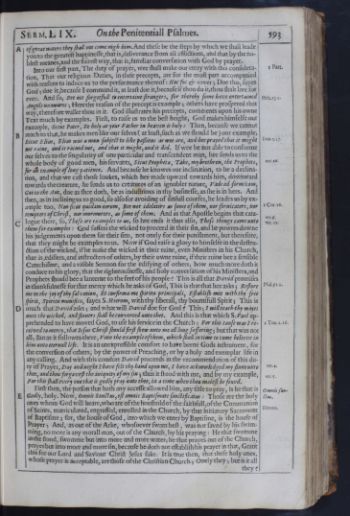 Serm. LVIX.
On the Penitentiall Psalmes.
593
of great waters they shall not come nigh him. And these be the steps by which we shall leade
Serm. LVIX.
On the Penitentiall Psalmes.
593
of great waters they shall not come nigh him. And these be the steps by which we shall leade
you to the greatest happinesse, that is, deliverance from all afflictions, and that by the no-
blest meanes, and the fairest way, that is, familiar conversation with God by prayer.
Into our first part, 1 Part. The duty of prayer, wee shall make our entry with this considera-
tion, That our religious Duties, in their precepts, are for the most part accompanied
with reasons to induce us to the performance thereof: Hoc fac & vives; Doe this, sayes
God; doe it, because I command it, at least doe it, because if thou do it, thou shalt live for
ever. And so, Bee not forgetfull to entertaine strangers,Heb. 13.2. for thereby some have entertained
Angels unawares; Here the reason of the precept is example; others have prospered that
way, therefore walke thou in it. God illustrates his precepts, comments upon his owne
Text much by examples. First, to raise us to the best height, God makes himselfe our
example, Sicut Pater, Be holy as your Father in heaven is holy: Then, because we cannot
reach to that, he makes men like our selves (at least, such as we should be) our example,
Sicut Elias, Elias was a man subject to like passions as wee are,Iam. 5.27. and hee prayed that it might
not raine, and it rained not, and that it might, and it did. If wee be not able to conforme
our selves to the singularity of one particular and transcendent man, hee sends us to the
whole body of good men, his servants, Sicut Prophetæ, Take, my brethren, the Prophets,
ver. 10. for an example of long patience. And because he knowes our inclination, to be a declina-
tion, and that we cast those lookes, which hee made upward towards him, downward
towards the creature, he sends us to creatures of an ignobler nature, Vade ad formicam,
Goe to the Ant, doe as shee doth, be as industrious in thy businesse, as she is in hers. And
then, as in inclining us to good, so also for avoiding of sinfull courses, he leades us by ex-
ample too, Non sicut quidam eorum, Bee not idolaters as some of them, nor fornicators,1 Cor. 10. nor
tempters of Christ, nor murmurers, as some of them. And as that Apostle begins that cata-
logue there, so, These are examples to us, so hee ends it thus also, ver. 6.
ver. 11. These things came unto
them for examples: God suffers the wicked to proceed in their sin, and he powres downe
his judgements upon them for their sins, not onely for their punishment, but therefore,
that they might be examples to us. Now if God raise a glory to himselfe in the destru-
ction of the wicked, if he make the wicked in their ruine, even Ministers in his Church,
that is, edifiers, and instructers of others, by their owne ruine, if their ruine bee a sensible
Catechisme, and a visible Sermon for the edifying of others, how much more doth it
conduce to his glory, that the righteousnesse, and holy conversation of his Ministers, and
Prophets should bee a lanterne to the feet of his people? This is all that David promises
in thankfulnesse for that mercy which he asks of God, This is that that hee asks;Psal. 51.2. Restore
me to the joy of thy salvation, Et confirma me spiritu principali, Establish mee with thy free
spirit, Spiritu munisico, sayes S. Hierom, with thy liberall, thy bountifull Spirit; This is
much that David asks; and what will David doe for God? This; I will teach thy wayes
unto the wicked, and sinners shall be converted unto thee. And this is that which S. Paul ap-
prehended to have moved God, to use his service in the Church;1 Tim. 1.16. For this cause was I re-
ceived to mercy, that Iesus Christ should first shew unto me all long suffering; but that was not
all; But as it followes there, Vnto the example of them, which shall in time to come beleeve in
him unto eternall life. It is an unexpressible comfort to have beene Gods instrument, for
the conversion of others, by the power of Preaching, or by a holy and exemplar life in
any calling. And with this comfort David proceeds in the recommendation of this du-
ty of Prayer, Day and night I have felt thy hand upon me,ver. 4. I have acknowledged my sinne unto
thee, and thou forgavest the iniquity of my sin; thus it stood with me, and by my example,
ver. 5. For this shall every one that is godly pray unto thee, in a time when thou maiest be found.
First then, the person that hath any accesse allowed him, any title to pray, Omnis san-
ctus. is he that is
Godly, holy. Now, Omnis Sanctus, est omnis Baptismate sanctificatus: Those are the holy
ones whom God will heare, who are of the houshold of the faithfull, of the Communion
of Saints, matriculated, engraffed, enrolled in the Church, Hierom. by that initiatory Sacrament
of Baptisme; for, the house of God, into which we enter by Baptisme, is the house of
Prayer; And, as out of the Arke, whosoever swam best, was not saved by his swim-
ming, no more is any morall man, out of the Church, by his praying: He that swomme
in the flood, swomme but into more and more water; he that prayes out of the Church,
prayes but into more and more sin, because he doth not establish his prayer in that, Grant
this for our Lord and Saviour Christ Jesus sake. It is true then, that these holy ones,
whose prayer is acceptable, are those of the Christian Church; Onely they; but is it all they?
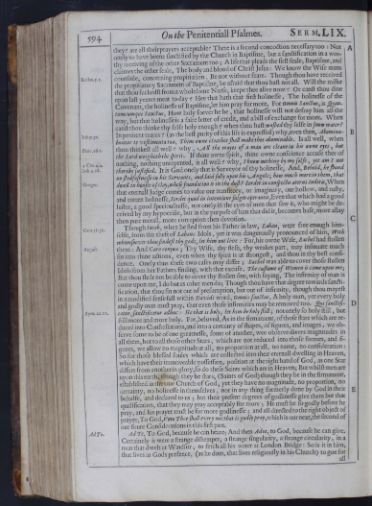 594
On the Penitentiall Psalmes.
Serm. LIX.
they? are all their prayers acceptable? There is a second concoction necessary too: Not
594
On the Penitentiall Psalmes.
Serm. LIX.
they? are all their prayers acceptable? There is a second concoction necessary too: Not
onely to have beene sanctified by the Church in Baptisme, but a sanctification in a wor-
thy receiving of the other Sacrament too; A life that pleads the first seale, Baptisme, and
claimes the other seale, The body and blood of Christ Jesus: We know the Wise mans
counsaile, Ecclus. 5.5. concerning propitiation, Be not without feare. Though thou have received
the propitiatory Sacrament of Baptisme, be afraid that thou hast not all. Will the milke
that thou suckedst from a wholesome Nurse, keepe thee alive now? Or canst thou dine
upon last yeares meat to day? Hee that hath that first holinesse, The holinesse of the
Covenant, the holinesse of Baptisme, let him pray for more. For Omnis Sanctus, is Quan-
tumcumque Sanctus, How holy soever he be, that holinesse will not defray him all the
way, but that holinesse is a faire letter of credit, and a bill of exchange for more. When
canst thou thinke thy selfe holy enough? when thou hast washed thy selfe in snow water?
In penitent teares?Iob 9.30. (as the best purity of this life is expressed) why, even then, Abomina-
buntur te vestimenta tua, Thine owne cloathes shall make thee abominable. Is all well, when
thou thinkest all well?Prov. 16.2. why, All the wayes of a man are cleane in his owne eyes, but
the Lord weigheth the spirit. If thine owne spirit, thine owne conscience accuse thee of
nothing, 1 Cor. 4.4.
Iob 4.18. nothing unrepented, is all well? why, I know nothing by my selfe, yet am I not
thereby justified. It is God onely that is Surveyor of thy holinesse, And, Behold, he found
no stedfastnesse in his Servants, and laid folly upon his Angels; how much more in them, that
dwell in houses of clay,Gregor. whose foundation is in the dust? Sordet in conspectu æterni Iudieis, When
that eternall Judge comes to value our transitory, or imaginary, our hollow, and rusty,
and rotten holinesse, Sordet quod in intentione fulget operantis, Even that which had a good
lustre, a good speciousnesse, not onely in the eyes of men that saw it, who might be de-
ceived by my hypocrisie, but in the purpose of him that did it, becomes base, more allay
then pure metall, more corruption then devotion.
Though Iacob,Gen. 31.31. when he fled from his Father in law, Laban, were free enough him-
selfe, from the theft of Labans Idols, yet it was dangerously pronounced of him, With
whomsoever thou findest thy gods, let him not live: For, his owne Wife, Rachel had stollen
them:August. And Caro conjux; Thy Wife, thy flesh, thy weaker part, may insinuate much
sin into thine actions, even when thy spirit is at strongest, and thou in thy best confi-
dence. Onely thus these two cases may differ; Rachel was able to cover those stollen
Idols from her Fathers finding, with that excuse, The custome of Women is come upon me;
But thou shalt not be able to cover thy stollen sins, with saying, The infirmity of man is
come upon me, I do but as other men do; Though thou have that degree towards sancti-
fication, that thou sin not out of presumption, but out of infirmity, though thou mayest
in a modified sense fall within Davids word, Omnis sanctus, A holy man, yet every holy
and godly man must pray, that even those infirmities may be removed too. Qui sanctifi-
catur, sanctificetur adhuc:Apoc 22.11. He that is holy, let him be holy still; not onely so holy still, but
still more and more holy. For, beloved, As in the firmament, of those stars which are re-
duced into Constellations, and into a certainty of shapes, of figures, and images, we ob-
serve some to be of one greatnesse, some of another, wee observe divers magnitudes in
all them, but to all those other Stars, which are not reduced into those formes, and fi-
gures, we allow no magnitude at all, no proportion at all, no name, no consideration:
So for those blessed soules which are collected into their eternall dwelling in Heaven,
which have their immoveable possession, position at the right hand of God, as one Star
differs from another in glory, so do these Saints which are in Heaven; But whilst men are
upon this earth, though they be stars, (Saints of God) though they be in the firmament,
established in the true Church of God, yet they have no magnitude, no proportion, no
certainty, no holinesse in themselves, nor in any thing formerly done by God in their
behalfe, and declared to us; but their present degrees of godlinesse give them but that
qualification, that they may pray acceptably for more; He must be so godly before he
pray, and his prayer must be for more godlinesse; and all directed to the right object of
prayer, To God, Vnto Thee shall every one that is godly pray, which is our next, the second of
our foure Considerations in this first part.
Ad Te,Ad Te. To God, because he can heare; And then Ad te, to God, because he can give.
Certainely it were a strange distemper, a strange singularity, a strange circularity, in a
man that dwelt at Windsor, to fetch all his water at London Bridge: So is it in him,
that lives in Gods presence, (as he does, that lives religiously in his Church) to goe for all
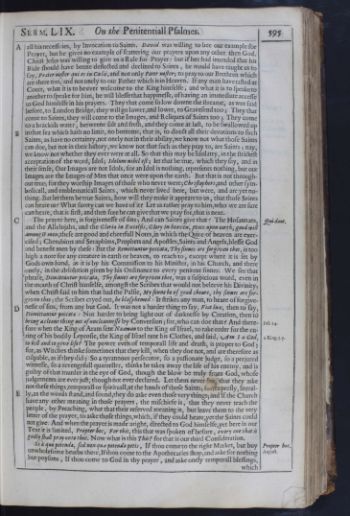 Serm. LVIX.
On the Penitentiall Psalmes.
595
all his necessities, by Invocation to Saints. David was willing bee our example for
Serm. LVIX.
On the Penitentiall Psalmes.
595
all his necessities, by Invocation to Saints. David was willing bee our example for
Prayer, but he gives no example of scattering our prayers upon any other then God.
Christ Jesus was willing to give us a Rule for Prayer: but if hee had intended that his
Rule should have beene deflected and declined to Saints, he would have taught us to
say, Frater noster qui es in Cœlis, and not only Pater noster; to pray to our Brethren which
are there too, and not onely to our Father which is in Heaven. If any man have tasted at
Court, what it is to be ever welcome to the King himselfe, and what it is to speake to
another to speake for him, he will blesse that happinesse, of having an immediate accesse
to God himselfe in his prayers. They that come so low downe the streame, as wee said
before, to London Bridge, they will go lower, and lower, to Gravesend too; They that
come to Saints, they will come to the Images, and Reliques of Saints too; They come
to a brackish water, betweene salt and fresh, and they come at last, to be swallowed up
in that sea which hath no limit, no bottome, that is, to direct all their devotions to such
Saints, as have no certainty, not onely not in their ability, we know not what those Saints
can doe, but not in their history, we know not that such as they pray to, are Saints; nay,
we know not whether they ever were at all. So that this may be Idolatry, in the strictest
acceptation of the word, Idol; Idolum nihil est; let that be true, which they say, and in
their sense, Our Images are not Idols, for an Idol is nothing, represents nothing, but our
Images are the Images of Men that once were upon the earth. But that is not through-
out true; for they worship Images of those who never were; Christophers, and other sym-
bolicall, and emblematicall Saints, which never lived here, but were, and are yet no-
thing. But let them be true Saints, how will they make it appeare to us, that those Saints
can heare us? What surety can we have of it? Let us rather pray to him, who we are sure
can heare, that is first, and then sure he can give that we pray for, that is next.
The prayer here, is forgivenesse of sins; And can Saints give that? The Hosannaes,
Qui dant. and the Allelujahs, and the Gloria in Excelsis, Glory in heaven, peace upon earth, good will
amongst men, these are good and cheerfull Notes, in which the Quire of heaven are exer-
cised; Cherubims and Seraphims, Prophets and Apostles, Saints and Angels, blesse God
and benefit men by these: But the Remittuntur peccata, Thy sinnes are forgiven thee, is too
high a note for any creature in earth or heaven, to reach to, except where it is set by
Gods own hand, as it is by his Commission to his Minister, in his Church, and there
onely, in the absolution given by his Ordinance to every penitent sinner. We see that
phrase, Dimittuntur peccata, Thy sinnes are forgiven thee, was a suspicious word, even in
the mouth of Christ himselfe, amongst the Scribes that would not beleeve his Divinity;
when Christ said to him that had the Palsie, My sonne be of good cheare, thy sinnes are for-
given thee; the Scribes cryed out, he blasphemed: It strikes any man, to heare of forgive-
nesse of sins, from any but God. It was not a harder thing to say, Fiat lux, then to say,
Dimittuntur peccata: Not harder to bring light out of darknesse by Creation, then to
bring a cleane thing out of uncleannesse by Conversion; for, who can doe that?Iob 14. And there-
fore when the King of Aram sent Naaman to the King of Israel, to take order for the cu-
ring of his bodily Leprosie, the King of Israel rent his Clothes, and said, Am I a God,
2 King. 5.7. to kill and to give life? The power even of temporall life and death, is proper to God;
for, as Witches thinke sometimes that they kill, when they doe not, and are therefore as
culpable, as if they did; So a tyrannous persecutor, so a passionate Judge, so a perjured
witnesse, so a revengefull quarreller, thinks he takes away the life of his enemy, and is
guilty of that murder in the eye of God, though the blow be truly from God, whose
judgements are ever just, though not ever declared. Let them never say, that they aske
not these things, temporall or spirituall, at the hands of those Saints; for, expresly, literal-
ly, as the words stand, and sound, they do aske even those very things; and if the Church
have any other meaning in those prayers, the mischiefe is, that they never teach the
people, by Preaching, what that their reserved meaning is, but leave them to the very
letter of the prayer, to aske those things, which, if they could heare, yet the Saints could
not give. And when the prayer is made aright, directed to God himselfe, yet here in our
Text it is limited, Propter hoc, For this, this that was spoken of before, every one that is
godly shall pray unto thee. Now what is this This? for that is our third Consideration.
Si à quo petenda, sed non quæ petenda petis, If thou come to the right Market, Propter hoc.
August. but buy
unwholesome hearbs there, If thou come to the Apothecaries shop, and aske for nothing
but poysons, If thou come to God in thy prayer, and aske onely temporall blessings, which
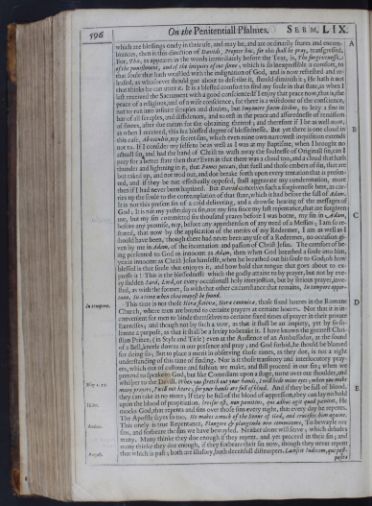 596
On the Penitentiall Psalmes.
Serm. LIX.
which are blessings onely in their use, and may be, and are ordinarily snares and encum-
596
On the Penitentiall Psalmes.
Serm. LIX.
which are blessings onely in their use, and may be, and are ordinarily snares and encum-brances, then is this direction of Davids, Propter hoc, for this shall he pray, transgressed.
For, This, as appeares in the words immediately before the Text, is, The forgivenesse
of the punishment, and of the iniquity of our sinne; which is so inexpressible a comfort, to
that soule that hath wrastled with the indignation of God, and is now refreshed and re-
leased, as whosoever should goe about to describe it, should diminish it; He hath it not
that thinks he can utter it. It is a blessed comfort to find my soule in that state, as when I
last received the Sacrament with a good conscience: If I enjoy that peace now, that is, the
peace of a religious, and of a wise conscience; for there is a wisedome of the conscience,
not to run into infinite scruples and doubts, but Imponere finem litibus, to levy a fine in
bar of all scruples, and diffidences, and to rest in the peace and assurednesse of remission
of sinnes, after due means for the obtaining thereof; and therefore if I be as well now,
as when I received, this is a blessed degree of blessednesse. But yet there is one cloud in
this case, Ab occultis, my secret sins, which even mine own narrowest inquisition extends
not to. If I consider my selfe to be as well as I was at my Baptisme, when I brought no
actuall sin, and had the hand of Christ to wash away the foulnesse of Originall sin, can I
pray for a better state then that? Even in that there was a cloud too, and a cloud that hath
thunder and lightning in it, that Fomes peccati, that fuell and those embers of sin, that are
but raked up, and not trod out, and doe breake forth upon every tentation that is presen-
ted, and if they be not effectually opposed, shall aggravate my condemnation, more
then if I had never been baptized. But David conceives such a forgivenesse here, as car-
ries up the soule to the contemplation of that state, which it had before the fall of Adam.
It is not this present sin of a cold delivering, and a drowsie hearing of the messages of
God; It is not my yesterdayes sin, nor my sins since my last repentance, that are forgiven
me, but my sin committed six thousand yeares before I was borne, my sin in Adam,
before any promise, nay, before any apprehension of any need of a Messias; I am so re-
stored, that now by the application of the merits of my Redeemer, I am as well as I
should have been, though there had never been any use of a Redeemer, no occasion gi-
ven by me in Adam, of the incarnation and passion of Christ Jesus. The comfort of be-
ing presented to God as innocent as Adam, then when God breathed a soule into him,
yea as innocent as Christ Jesus himselfe, when he breathed out his soule to God; oh how
blessed is that soule that enjoyes it, and how bold that tongue that goes about to ex-
presse it! This is the blessednesse which the godly attaine to by prayer, but not by eve-
ry sudden Lord, Lord, or every occasionall holy interjection, but by serious prayer, inve-
sted, as with the former, so with that other circumstance that remains, In tempore oppor-
tuno, In a time when thou mayest be found.
This time is not those Horæ stativæ, Horæ canonicæ,In tempore. those fixed houres in the Romane
Church, where men are bound to certaine prayers at certaine houres. Not that it is in-
convenient for men to binde themselves to certaine fixed times of prayer in their private
Exercises; and though not by such a vow, as that it shall be an impiety, yet by so so-
lemne a purpose, as that it shall be a levity to breake it. I have known the greatest Chri-
stian Prince, (in Style and Title) even at the Audience of an Ambassador, at the sound
of a Bell, kneele downe in our presence and pray; and God forbid, he should be blamed
for doing so; But to place a merit in observing those times, as they doe, is not a right
understanding of this time of finding. Nor is it those transitory and interlocutory pray-
ers, which out of custome and fashion we make, and still proceed in our sin; when we
pretend to speake to God, but like Comedians upon a stage, turne over our shoulder, and
whisper to the Devill.Esay. 1.15. When you stretch out your hands, I will hide mine eyes; when you make
many prayers, I will not heare; for your hands are full of blood. And if they be full of blood,
they can take in no more; If they be full of the blood of oppression, they can lay no hold
upon the blood of propitiation.Isidor. Irrisor est, non pœnitens, qui adhuc agit quod pœniter, He
mocks God, that repents and sins over those sins every night, that every day he repents.
The Apostle sayes so too, He makes a mock of the Sonne of God, and crucifies him againe.
This onely is true Repentance, Ambro. Plangere & plangenda non committere, To bewayle our
sins, and forbeare the sins we have bewayled. Neither alone will serve; which deludes
many. Many thinke they doe enough if they repent, and yet proceed in their sin; and
many thinke they doe enough, if they forbeare their sin now, though they never repent
that which is past;August. both are illusory, both deceitfull distempers. Lacessit Iudicem, qui post-
posita
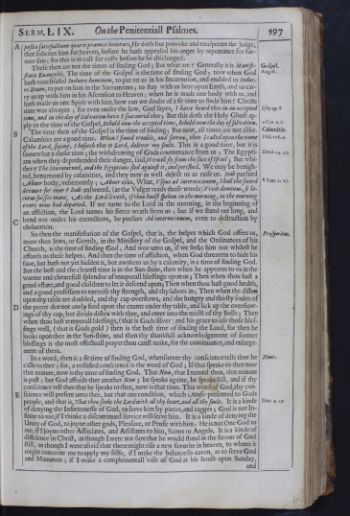 Serm. LVIX.
On the Penitentiall Psalmes.
597
posita satisfactione quærit præmiis honorari, He doth but provoke and exasperate the Judge,
Serm. LVIX.
On the Penitentiall Psalmes.
597
posita satisfactione quærit præmiis honorari, He doth but provoke and exasperate the Judge,
that solicites him for heaven, before he hath appeased his anger by repentance for for-
mer sins; for this is to call for costs before he be discharged.
These then are not the times of finding God; but what are?Gospel.
August. Generally it is Manife-
statio Euangelii, The time of the Gospel is the time of finding God; now when God
hath vouchsafed Induere hominem, to put on us in his Incarnation, and enabled us Indue-
re Deum, to put on him in the Sacraments; to stay with us here upon Earth, and to car-
ry us up with him in his Ascension to Heaven; when he is made one body with us, and
hath made us one Spirit with him, how can we doubt of a fit time to finde him? Christs
time was alwayes; for even under the law, God sayes, Esay 49.8. I have heard thee in an accepted
time, and in the day of Salvation have I succoured thee; But this doth the Holy Ghost ap-
ply to the time of the Gospel, 2 Cor. 2.6.Behold now the accepted time, behold now the day of salvation.
The time then of the Gospel is the time of finding; But now, all times are not alike. Calamitie.
Calamities are a good time. Psal. 116.4. When I found trouble, and sorrow, then I called upon the name
of the Lord, saying, I beseech thee O Lord, deliver my soule. This is a good time, but it is
somewhat a darke time; the withdrawing of Gods countenance from us;Exod. 14.25. The Egypti-
ans when they deprehended their danger, said, We will fly from the face of Israel; But whi-
ther? The Seareturned, and the Egyptians fled against it, and perished. We may be benigh-
ted, benummed by calamities, and they may as well deject us as raise us. Ioab pursued
Abner hotly, vehemently; Abner asks, What, Vsque ad internecionem,2 Sam. 2.25. Shall the sword
devoure for ever? Ioab answered, (as the Vulgat reads those words) Vivit dominus, si lo-
cutus fuisses mane, As the Lord liveth, if thou hadst spoken in the morning, in the morning
every man had departed. If we turne to the Lord in the morning, in the beginning of
an affliction, the Lord turnes his fierce wrath from us; but if we stand out long, and
bend not under his corrections, he pursues Ad internecionem, even to destruction by
obduration.
So then the manifestation of the Gospel, that is, the helpes which God offers us,
Prosperitus. more then Jews, or Gentils, in the Ministery of the Gospel, and the Ordinances of his
Church, is the time of finding God; And woe unto us, if we seeke him not whilest he
affords us these helpes; And then the time of affliction, when God threatens to hide his
face, but hath not yet hidden it, but awakens us by a calamity, is a time of finding God.
But the best and the clearest time is in the Sun-shine, then when he appeares to us in the
warme and chearefull splendor of temporall blessings upon us; Then when thou hast a
good estate, and good children to let it descend upon; Then when thou hast good health,
and a good profession to exercise thy strength, and thy labors in; Then when the dishes
upon thy table are doubled, and thy cup overflows, and the hungry and thirsty soules of
the poore doe not onely feed upon the crums under thy table, and lick up the overflow-
ings of thy cup, but divide dishes with thee, and enter into the midst of thy Bolls; Then
when thou hast temporall blessings, (that is Gods silver) and his grace to use those bles-
sings well, (that is Gods gold) then is the best time of finding the Lord, for then he
looks upon thee in the Sun-shine, and then thy thankfull acknowledgement of former
blessings is the most effectuall prayer thou canst make, for the continuance, and enlarge-
ment of them.
In a word, then is a fit time of finding God, Nunc. whensoever thy conscience tells thee he
calls to thee; for, a rectified conscience is the word of God; If that speake to thee now
this minute, now is thy time of finding God. That Now, that I named then, that minute
is past; but God affords thee another Now; he speaks againe, he speaks still, and if thy
conscience tell thee that he speaks to thee, now is that time. This word of God, thy con-
science will present unto thee, but that one condition, which Moses presented to Gods
Deut. 4. 29. people, and that is, That thou seeke the Lord with all thy heart, and all thy soule. It is a kinde
of denying the Infinitenesse of God, to serve him by pieces, and ragges; God is not In-
finite to me, if I thinke a discontinued service will serve him. It is a kinde of denying the
Unity of God, to joyne other gods, Pleasure, or Profit with him; He is not One God to
me, if I joyne other Associates, and Assistants to him, Saints or Angels. It is a kinde of
diffidence in Christ, as though I were not sure that he would stand in the favour of God
still, as though I were afraid that there might rise a new favorite in heaven, to whom it
might concerne me to apply my selfe, If I make the balance so eaven, as to serve God
and Mammon; if I make a complementall visit of God at his house upon Sunday, and
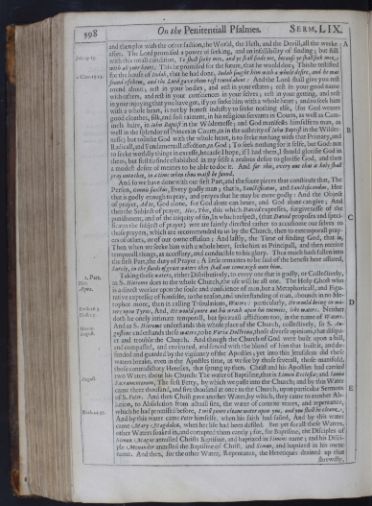 598
On the Penitentiall Psalmes.
Serm. LIX.
and then plot with the other faction, the World, the Flesh, and the Devill, all the weeke
598
On the Penitentiall Psalmes.
Serm. LIX.
and then plot with the other faction, the World, the Flesh, and the Devill, all the weeke
after.Jer. 29.13. The Lord promised a power of seeking, and an infallibility of finding; but still
with this totall condition, Ye shall seeke mee, and ye shall finde me, because ye shall seek mee
with all your heart. This he promised for the future, that he would doe; This he testified
for the house of Iudah,2 Chro. 15.15. that he had done, Iudah sought him with a whole desire, and he was
found of them, and the Lord gave them rest round about: And the Lord shall give you rest
round about; rest in your bodies, and rest in your estates; rest in your good name
with others, and rest in your consciences in your selves; rest in your getting, and rest
in your injoying that you have got, if you seeke him with a whole heart; and to seek him
with a whole heart, is not by honest industry to seeke nothing else, (for God weares
good cloathes, silk, and soft raiment, in his religious servants in Courts, as well as Cam-
mels haire, in Iohn Baptist in the Wildernesse; and God manifests himselfe to man, as
well in the splendor of Princes in Courts, as in the austerity of Iohn Baptist in the Wilder-
nesse) but to seeke God with the whole heart, is to seeke nothing with that Primary, and
Radicall, and Fundamentall affection, as God; To seek nothing for it selfe, but God: not
to seeke world things in excesse, because I hope, if I had them, I should glorifie God in
them; but first to finde established in my selfe a zealous desire to glorifie God, and then
a modest desire of meanes to be able to doe it. And for this, every one that is holy shall
pray unto thee, in a time when thou maist be found.
And so we have done with our first Part, and the foure pieces that constitute that, The
Person, Omnis sanctus, Every godly man; that is, Sanctificatus, and Sanctificandus, Hee
that is godly enough to pray, and prayes that he may be more godly: And the Object
of prayer, Ad te, God alone, for God alone can heare, and God alone can give; And
then the Subject of prayer, Hoc, This, this which David expresses, forgivenesse of the
punishment, and of the iniquity of fin, In which respect, (that David proposes and speci-
ficates the subject of prayer) wee are fairely directed rather to accustome our selves to
those prayers, which are recommended to us by the Church, then to extemporall pray-
ers of others, or of our owne effusion; And lastly, the Time of finding God, that is,
Then when we seeke him with a whole heart, seeke him as Principal, and then receive
temporall things, as accessory, and conducible to his glory. Thus much hath fallen into
the first Part, the duty of Prayer; A little remaines to be said of the benefit here assured,
Surely, in the floods of great waters they shall not come nigh unto him.
Taking these waters,2. Part.
Hier.
Aquæ. either Distributively, to every one that is godly, or Collectively,
as S. Hierome does to the whole Church, the use will be all one. The Holy Ghost who
is a direct worker upon the soule and conscience of man, but a Metaphoricall, and Figu-
rative expresser on himselfe, to the reason, and understanding of man, abounds in no Me-
tophor more, then in calling Tribulations, Waters: particularly, He would bring in wa-
ters upon Tyrus,Ezek. 26.3.
Hosea 5. And, He would poure out his wrath upon his enemies, like waters. Neither
doth he onely intimate temporall, but spirituall afflictions too, in the name of Waters.
And as S. Hierome understands this whole place of the Church, Hieron.
August. collectively, so S. Au-
gustine understands these waters, to be Varia Doctrinæ, those diverse opinions, that disqui-
et and trouble the Church. And though the Church of God were built upon a hill,
and compassed, and environed, and fenced with the blood of him that built it, and de-
fended and guarded by the vigilancy of the Apostles; yet into this Jerusalem did these
waters breake, even in the Apostles time, as we see by those severall, those manifold,
those contradictory Heresies, that sprung up them. Christ and his Apostles had carried
two Waters about his Church: The water of Baptisme, that is Limen Ecclesiæ, and Ianua
Sacramentorum,August. The first Ferry, by which we passe into the Church; and by this Water
came three thousand, and five thousand at once to the Church, upon particular Sermons
of S. Peter. And then Christ gave another Water, by which, they came to another Ab-
lution, to Absolution from actuall fins, the water of contrite teares, and repentance,
which he had promised before, Ezek. 24.35. I will poure cleane water upon you, and you shall be cleane,
And by this water came Peter himselfe, when his faith had failed, And by this water
came Mary Magdalen, when her life had been defiled. But yet for all these Waters,
other Waters soaked in, and corrupted them earely; for, for Baptisme, the Disciples of
Simon Magus annulled Christs Baptisme, and baptized in Simons name; and his Disci-
ple Menander annulled the Baptisme of Christ, and Simon, and baptized in his owne
name. And then, for the other Water, Repentance, the Heretiques drained up that shrewdly,
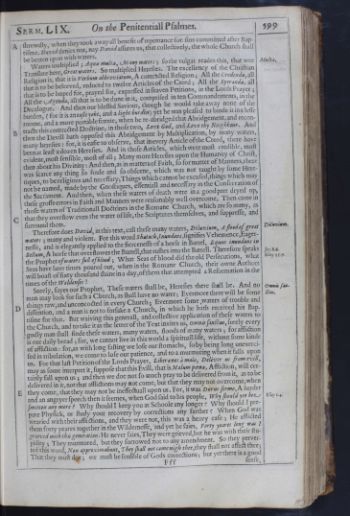 Serm. LVIX.
On the Penitentiall Psalmes.
597
shrewdly, when they took away all benefit of repentance for sins committed after Bap-
Serm. LVIX.
On the Penitentiall Psalmes.
597
shrewdly, when they took away all benefit of repentance for sins committed after Bap-tisme. David denies not, nay David assures us, that collectively, the whole Church shall
be beaten upon with waters.
Water multiplied; Aquæ multæ, Many waters; so the vulgat reades this, Multæ. that wee
Translate here, Great waters. So multiplied Heresies. The excellency of the Christian
Religion is, that it is Verbum abbreviatum, A contracted Religion; All the Credenda, all
that is to be beleeved, reduced to twelve Articles of the Creed; All the Speranda, all
that is to be hoped for, prayed for, expressed in seaven Petitions, in the Lords Prayer;
All the Agenda, all that is to be done in it, comprised in ten Commandements, in the
Decalogue. And then our blessed Saviour, though he would take away none of the
burden, (for it is an easie yoke, and a light burden) yet he was pleased to binde it in a lesse
roome, and a more portable forme, when he re-abridged that Abridgement, and recon-
tracts this contracted Doctrine, in those two, Love God, and Love thy Neighbour. And
then the Devill hath opposed this Abridgement by Multiplication, by many waters,
many heresies: for, it is easie to observe, that in every Article of the Creed, there have
been at least a dozen Heresies. And in those Articles, which were most credible, most
evident, most sensible, most of all; Many more Heresies upon the Humanity of Christ,
then about his Divinity: And then, as in matters of Faith, so for matter of Manners, there
was scarce any thing so foule and so obscene, which was not taught by some Here-
tiques, to be religious and necessary; Things which cannot be excused, things which may
not be named, made by the Gnostiques, essentiall and necessary in the Consecration of
the Sacrament. And then, when these waters of death were in a good part dryed up,
these grosse errors in Faith and Manners were reasonably well overcome, Then came in
those waters of Traditional Doctrines in the Romane Church, which are so many, as
that they overflow even the water of life, the Scriptures themselves, and suppresse, and
surround them.
Therefore does David, in this text, call these many waters, Diluvium,Diluvium. A flood of great
waters; many and violent. For this word Shatach, Inundans, signifies Vehemence, Eager-
nesse, and is elegantly applied to the fiercenesse of a horse in Battel, Equus inundans in
Bellum, A horse that overflowes the Battell, that rushes into the Battell.Jer. 8.6.
Esay 15.9. Therefore speaks
the Prophet of waters full of blood; What Seas of blood did the old Persecutions, what
Seas have later times poured out, when in the Romane Church, their owne Authors
will boast of sixty thousand slaine in a day, of them that attempted a Reformation in the
times of the Waldenses!
Surely, sayes our Prophet, These waters shall be, Heresies there shall be.Omnis san-
ctus. And no
man may look for such a Church, as shall have no water; Evermore there will be some
things raw, and unconcocted in every Church; Evermore some waters of trouble and
dissention, and a man is not to forsake a Church, in which he hath received his Bap-
tisme for that. But waiving this generall, and collective application of these waters to
the Church, and to take it as the letter of the Text invites us, Omnis sanctus, surely every
godly man shall finde these waters, many waters, floods of many waters; for affliction
is our daily bread; for, we cannot live in this world a spirituall life, without some kinde
of affliction: for, as with long fasting we lose our stomachs, so by being long unexerci-
sed in tribulation, we come to lose our patience, and to a murmuring when it falls upon
us. For that last Petition of the Lords Prayer, Liberanos à malo, Deliver us from evill,
may as some interpret it, suppose that this Evill, that is Malum pœnæ, Affliction, will cer-
tainly fall upon us; and then we doe not so much pray to be delivered from it, as to be
delivered in it, not that afflictions may not come, but that they may not overcome, when
they come, that they may not be ineffectuall upon us. For, it was Durus sermo, A harder
and an angryer speech then it seemes, when God said to his people, Esay 1.4. Why should yee bee
smitten any more? Why should I keep you at Schoole any longer? Why should I pre-
pare Physick, or study your recovery by corrections any farther? When God was
wearied with their afflictions, and they were not, this was a heavy case; He afflicted
them forty yeares together in the Wildernesse, and yet he saies, Forty yeares long was I
grieved with this generation: He never saies, They were grieved, but he was with their stu-
pidity; They murmured, but they sorrowed not to any amendment. So they perver-
ted this word, Non approximabunt, They shall not come nigh thee, they shall not affect thee;
That they must doe; we must be sensible of Gods corrections; but yet there is a good Fff sense,
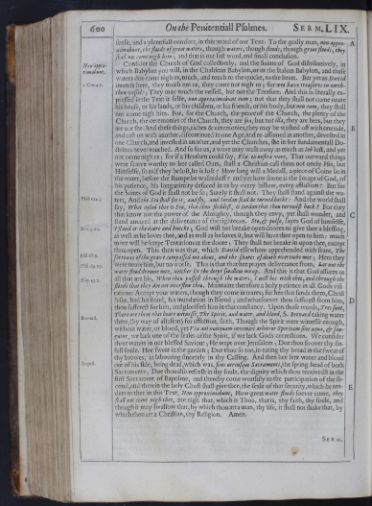 600
On the Penitentiall Psalmes.
Serm. LIX.
sense, and a plentifull comfort, in this word of our Text. To the godly man, non appro-
600
On the Penitentiall Psalmes.
Serm. LIX.
sense, and a plentifull comfort, in this word of our Text. To the godly man, non appro-ximabunt, the floods of great waters, though waters, though floods, though great floods, they
shall not come nigh him; and that is our last word, and finall conclusion.
Consider the Church of God collectively, Non appro-
ximabunt. and the Saints of God distributively, in
which Babylon you will, in the Chaldean Babylon, or in the Italian Babylon, and these
waters doe come nigh us, touch, and touch to the quicke, to the heart. But yet as David
intends here, 2 Cor. 4.7. they touch not us, they come not nigh us; for wee have treasures in earth-
then vessels; They may touch the vessels, but not the Treasure. And this is literally ex-
pressed in the Text it selfe, non approximabunt, eum; not that they shall not come neare
his house, or his lands, or his children, or his friends, or his body, but non eum, they shall
not come nigh him. For, for the Church, the peace of the Church, the plenty of the
Church, the ceremonies of the Church, they are sua, but not illa, they are hers, but they
are not she. And these things, riches & ceremonies, they may be washed off with onetide,
and cast on with another, discontinued in one Age, and re-assumed in another, devested in
one Church, and invested in another, and yet the Churches, she in her fundamentall Do-
ctrines never touched. And so for us, a wave may wash away as much as Iob lost, and yet
not come nigh us; for if a Heathen could say, Vix ea nostra voco, That outward things
were scarce worthy to bee called Ours, shall a Christian call them not onely His, but
Himselfe, so as if they be lost, he is lost? How long will a Medall, a piece of Coine lie in
the water, before the stampe be washed off? and yet how soone is the Image of God, of
his patience, his longanimity defaced in us by every billow, every affliction? But for
the Saints of God it shall not be so; Surely it shall not. They shall stand against the wa-
ters, Psal. 114.3. And the Sea shall see it, and fly, and Iordan shall be turned backe: And the world shall
say, What ayled thee O Sea, that thou fleddest, O Iordan that thou turnedst back? For they
that know not the power of the Almighty, though they envy, yet shall wonder, and
stand amazed at the deliverance of the righteous. Sto, & pulso, sayes God of himselfe,
I stand at the doore and knocke;Rev. 3.20. God will not breake open doores to give thee a blessing,
as well as he loves thee, and as well as he loves it, but will have thee open to him: much
more will he keepe Tentations at the doore; They shall not breake in upon thee, except
thou open. This then was that, which David elsewhere apprehended with feare, The
sorrowes of the grave compassed me about,Psal.18.5. and the snares of death overtooke mee; Here they
were neare him, but no worse.Psal. 69 15. This is that that hee prayes deliverance from, Let not the
water flood drowne mee, neither let the deepe swallow me up. And this is that God assures us
all that are his, Esay 43.2. When thou passest through the waters, I will bee with thee, and through the
floods that they doe not overflow thee. Maintaine therefore a holy patience in all Gods visi-
tations: Accept your waters, though they come in teares; for hee that sends them, Christ
Jesus, had his flood, his inundation in Blood; and whatsoever thou sufferest from him,
thou sufferest for him, and glorifiest him in that constancy. Upon those words, Tres sunt,
There are three that beare witnesse, That Spirit, and water, and blood,Bernard. S. Bernard taking water
there, (by way of allusion) for affliction, saith, Though the Spirit were witnesse enough,
without water, or blood, yet Vix aut nunquam inveniri arbitror Spiritum sine aqua, & san-
guine; we lack one of the seales of the Spirit, if we lack Gods corrections. We consider
three waters in our blessed Saviour; He wept over Jerusalem; Doe thou so over thy sin-
full soule. He sweat in the garden; Doe thou so too, in eating thy bread in the sweat of
thy browes, in labouring sincerely in thy Calling. And then hee sent water and blood
out of his side, August. being dead, which was, fons utriusque Sacramenti, the spring head of both
Sacraments; Doe thou also refresh in thy soule, the dignity which thou receivedst in the
first Sacrament of Baptisme, and thereby come worthily to the participation of the se-
cond, and therein the holy Ghost shall give thee, the seale of that security, which he ten-
ders to thee in this Text, Non approximabunt, How great water floods soever come, they
shall not come nigh thee, not nigh that, which is Thou, that is, thy faith, thy soule, and
though it may swallow that, by which thou art a man, thy life, it shall not shake that, by
which thou art a Christian, thy Religion. Amen. Serm.
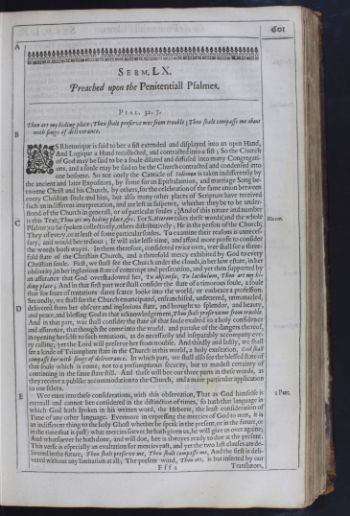 601
601
Serm. LX.
Preached upon the Penitentiall Psalmes.
Psal. 32.7.
Thou art my hiding place; Thou shalt preserve mee from trouble; Thou shalt compasse me about
with songs of deliverance.
ASAs Rhetorique is said to bee a fist extended and displayed into an open Hand,
And Logique a Hand recollected, and contracted into a fist; So the Church
of God may be said to be a soule dilated and diffused into many Congregati-
ons, and a soule may be said to be the Church contracted and condensed into
one bosome. So not onely the Canticle of Solomon is taken indifferently by
the ancient and later Expositors, by some for an Epithalamion, and marriage Song be-
tweene Christ and his Church, by others, for the celebration of the same union between
every Christian soule and him, but also many other places of Scripture have received
such an indifferent interpretation, and are left in suspence, whether they be to be under-
stood of the Church in generall, or of particular soules; And of this nature and number
is this Text, Thou art my hiding place, &c. For S. Hierom takes these words (and the whole
Psalme) to be spoken collectively, others distributively; He in the person of the Church,
Hieron. They of every, or at least of some particular soules. To examine their reasons is unneces-
sary, and would bee tedious; It will aske lesse time, and afford more profit to consider
the words both wayes. In them therefore, considered twice over, wee shall see a three-
fold state of the Christian Church, and a threefold mercy exhibited by God to every
Christian soule. First, we shall see the Church under the clouds, in her low estate, in her
obscurity, in her inglorious state of contempt and persecution, and yet then supported by
an assurance that God overshadowed her, Tu absconsio, Tu latibulum, Thou art my hi-
ding place; And in that first part wee shall consider the state of a timorous soule, a soule
that for feare of tentations dares scarce looke into the world, or embrace a profession.
Secondly, we shall see the Church emancipated, enfranchised, unfettered, unmanacled,
delivered from her obscure and inglorious state, and brought to splendor, and beauty,
and peace, and blessing God in that acknowledgement, Thou shalt preserve me from trouble.
And in that part, wee shall consider the state of that soule exalted to a holy confidence
and assurance, that though she come into the world, and partake of the dangers thereof,
in opening herselfe to such tentations, as do necessarily and inseparably accompany eve-
ry calling, yet the Lord will preserve her from trouble. And thirdly and lastly, we shall
see a kinde of Triumphant state in the Church in this world, a holy exultation, God shall
compasse her with songs of deliverance. In which part, we shall also see the blessed state of
that soule which is come, not to a presumptuous security, but to modest certainty of
continuing in the same state still. And these will bee our three parts in these words, as
they receive a publike accommodation to the Church, and a more particular application
to our selves.
Wee enter into these considerations, with this observation, 1 Part. That as God himselfe is
eternall and cannot bee considered in the distinction of times, so hath that language in
which God hath spoken in his written word, the Hebrew, the least consideration of
Time of any other language. Evermore in expressing the mercies of God to man, it is
an indifferent thing to the holy Ghost whether he speak in the present, or in the future, or
in the time that is past: what mercies soever he hath given us, he will give us over againe;
And whatsoever he hath done, and will doe, hee is alwayes ready to doe at the present.
This verse is especially an exultation for mercies past, and yet the two last clauses are de-
livered in the future, Thou shalt preserve me, Thou shalt compasse me, And the first is deli-
vered without any limitation at all; The present word, Thou art, is but inserted by our Fff2 Translators,Translators;
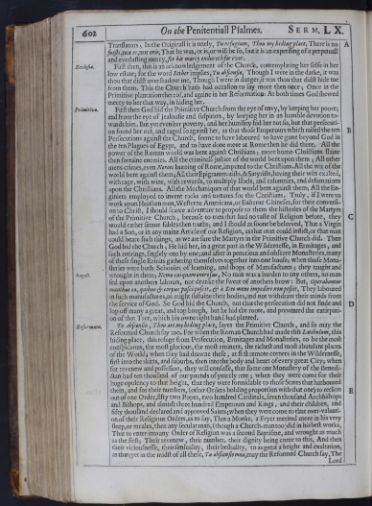 602
On the Penitentiall Psalmes.
Serm. LX.
Translators; In the Originall it is onely, Tu refugium, Thou my hiding place, There is no
602
On the Penitentiall Psalmes.
Serm. LX.
Translators; In the Originall it is onely, Tu refugium, Thou my hiding place, There is no
fuisti, nor es, nor eris, That he was, or is, or will be so, but it is an expressing of a perpetuall
and everlasting mercy, for his mercy endureth for ever.
First then, Ecclesia. this is an acknowledgement of the Church, contemplating her selfe in her
low estate; for the word Sether implies, Tu absconsio, Though I were in the darke, it was
thou that didst overshadow me, Though I were in danger, it was thou that didst hide me
from them. This the Church hath had occasion to say more then once; Once in the
Primitive plantation thereof, and againe in her Reformation: At both times God shewed
mercy to her that way, in hiding her.
First then God hid the Primitive Church from the eye of envy, Primitiva. by keeping her poore;
and from the eye of jealousie and suspition, by keeping her in an humble devotion to-
wards him. But yet even her poverty, and her humility hid her not so, but that persecuti-
on found her out, and raged so against her, as that those Emperours which raised the ten
Persecutions against the Church, seeme to have laboured to have gone beyond God in
the ten Plagues of Egypt, and to have done more at Rome then he did there. All the
power of the Roman world was bent against Christians; more home-Christians slaine
then forraine enemies. All the criminall justice of the world bent upon them; All other
mens crimes, even Neroes burning of Rome, imputed to the Christians. All the wit of the
world bent against them; All their Epigrammatists, & Satyrists, having their wits exalted,
with rage, with wine, with rewards, to multiply libels, and calumnies, and defamations
upon the Christians. All the Mechaniques of that world bent against them; All the En-
giniers employed to invent racks and tortures for the Christians. Truly, if I were to
work upon Heathen men, Westerne Americans, or Easterne Chineses, for their conversi-
on to Christ, I should scarce adventure to propose to them the histories of the Martyrs
of the Primitive Church, because to men that had no taste of Religion before, they
would rather seeme fables then truths; and I should as soone be beleeved, That a Virgin
had a Son, or in any maine Article of our Religion, as that man could inflict, or that man
could beare such things, as we are sure the Martyrs in the Primitive Church did. Then
God hid the Church; He hid her, in a great part in the Wildernesse, in Ermitages, and
such retirings, singlely one by one; and after in penurious and obscure Monasteries, many
of these single Ermits gathering themselves together into one house; when those Mona-
steries were both Schooles of learning, and shops of Manufactures; they taught and
wrought in them;August. Nemo cuiquam onerosus, No man was a burden to any others, no man
fed upon anothers labours, nor drunke the sweat of anothers brow: But, Operabantur
manibus ea, quibus & corpus pasci possit, & à Deo mens impediri non possit, They laboured
in such manufactures, as might sustaine their bodies, and not withdraw their minds from
the service of God. So God hid the Church, not that the persecution did not finde and
lop off many a great, and top bough, but he hid the roote, and prevented the extirpati-
on of that Tree, which his owne right hand had planted.
Tu absconsio,Reformata. Thou art my hiding place, sayes the Primitive Church, and so may the
Reformed Church say too. For when the Roman Church had made this Latibulum, this
hiding place, this refuge from Persecution, Ermitages and Monasteries, to be the most
conspicuous, the most glorious, the most eminent, the richest and most abundant places
of the World; when they had drawne these, at first remote corners in the Wildernesse,
first into the skirts, and suburbs, then into the body and heart of every great City; when
for revenew and possession, they will confesse, that some one Monastery of the Benedi-
ctan had ten thousand of our pounds of yearely rent; when they were come for their
huge opulency to that height, that they were formidable to those States that harboured
them, and for their numbers, (other Orders holding proportion with that one) to reckon
out of one Order, fifty two Popes, two hundred Cardinals, seven thousand Archbishops
and Bishops, and almost three hundred Emperours and Kings, and their children, and
fifty thousand declared and approved Saints; when they were come to that over-valuati-
on of their Religious Orders, as to say, That a Monke, a Fryer merited more in his very
sleep, or meales, then any secular man, (though a Church-man too) did in his best works,
That to enter into any Order of Religion was a second Baptisme, and wrought as much
as the first; Their revenew, their number, their dignity being come to this, And then
their viciousnesse, their sensuality, their bestiality, to as great a height and exaltation,
as that; yet in the midst of all these, Tu absconsio mea, may the Reformed Church say, The Lord
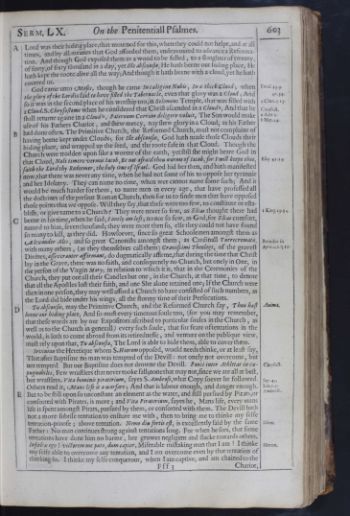 Serm. LVX.
On the Penitentiall Psalmes.
603
Lord was their hiding place, that mourned for this, when they could not helpe, and at all
Serm. LVX.
On the Penitentiall Psalmes.
603
Lord was their hiding place, that mourned for this, when they could not helpe, and at all
times, and by all meanes that God afforded them, endeavoured to advancea Reforma-
tion. And though God exposed them as a wood to be felled, to a slaughter of twenty,
of forty, of sixty thousand in a day, yet Ille absconsio, He hath beene our hiding place, He
hath kept the roote alive all the way; And though it hath beene with a cloud, yet he hath
covered us.
God came unto Moses, though he came In caligine Nubis, In a thick Cloud;Exod. 19.9. when
the glory of the Lord is said to have filled the Tabernacle, even that glory was a Cloud;40.34. And
so it was in the second place of his worship too, in Solomons Temple, 2 Chro. 5.13. that was filled with
a Cloud. S. Chrysostome when he considered that Christ ascended in a Clouda, a Acts 1. And that he
Chrysost. shall returne againe in a Cloud, Paternum Currum deligere voluit, The Son would make
use of his Fathers Chariot, and shew mercy, nay shew glory in a Cloudb, as his Father b Mat. 24.
had done often. The Primitive Church, the Reformed Church, must not complaine of
having beene kept under Clouds; for Ille absconsio, God hath made those Clouds their
hiding place, and wrapped up the seed, and the roote safe in that Cloud. Though the
Church were trodden upon like a worme of the earth, yet still she might heare God in
that Cloud, Noli timere vermis Iacob, Be not afraid thou worme of Iacob, for I will keepe thee,
Esay 41.14. saith the Lord thy Redeemer, the holy One of Israel. God hid her then, and hath manifested
now, that there was never any time, when he had not some of his to oppose her tyrannie
and her Idolatry. They can name no time, when wee cannot name some such; And it
would be much harder for them, to name men in every age, that have professed all
the doctrines of the present Roman Church, then for us to finde men that have opposed
those points that we oppose. Will they say, that these were too few, to constitute or esta-
blish, or give name to a Church? They were never so few, 1 King. 19.14. as Elias thought there had
beene in his time, when he said, I onely am left; no nor so few, as God, for Elias comfort,
named to him, seven thousand; they were more then so, else they could not have found
so many to kill, as they did. Howsoever, since so great Schoolemen amongst them as
Alexander Ales, and so great Canonists amongst them, as Cardinall Turrecremata,
Brondus
in Apoc. c. 1. q. 11. with many others, (as they themselves call them) Gravissimi Theologi, of the gravest
Divines, asseveranter affirmant, do dogmatically affirme, that during the time that Christ
lay in the Grave, there was no faith, and consequently no Church, but onely in One, in
the person of the Virgin Mary; in relation to which it is, that in the Ceremonies of the
Church, they put out all their Candles but one, in the Church, at that time, to denote
that all the Apostles lost their faith, and one She alone retained one; If the Church were
then in one person, they may well afford a Church to have consisted of such numbers, as
the Lord did hide under his wings, all the stormy time of their Persecutions.
Tu absconsio, may the Primitive Church, and the Reformed Church say, Anima. Thou hast
beene our hiding place, And so must every timerous soule too, (for you may remember,
that these words are by our Expositors ascribed to particular soules in the Church, as
well as to the Church in generall) every such soule, that for feare of tentations in the
world, is loth to come abroad from its retirednesse, and venture on the publique view,
must rely upon that, Tu absconsio, The Lord is able to hide them, able to cover them.
Iovinian the Heretique whom S. Hierom opposed, would needs thinke, or at least say,
That after Baptisme no man was tempted of the Devill: not onely not overcome, but
not tempted. But our Baptisme does not drowne the Devill.Chrysost. Pauci inter Athletas in ex-
pugnabiles, Few wrastlers that never tooke fall; none that may not, since we are all at best,
but wrastlers. Vita hominis piraterium, sayes S. Ambrose, what Copy soever he followed.
Ser. 42.
Iob. 7.1.
Ambrose. Others read it, Mans life is a warfare; And that is labour enough, and danger enough.
But to be still upon so unconstant an element as the water, and still pursued by Pirats, or
consorted with Pirates, is more; and Vita Piraterium, sayes he, Mans life, every mans
life is spent amongst Pirats, pursued by them, or consorted with them. The Devill hath
not a more subtile tentation to ensnare me with, then to bring me to thinke my selfe
tentation-proofe; above tentation. Nemo diu fortis est,Idem. is excellently said by the same
Father: No man continues strong against tentations long. For when he sees, that some
tentations have done him no harme, hee growes negligent and slacke towards others.
Infœlix ego! victonem me puto, dum capior, Miserable mistaking man that I am!Hieron. I thinke
my selfe able to overcome any tentation, and I am overcome even by that tentation of
thinking so. I thinke my selfe conquerour, when I am captive, and am chained to the Fff3 Chariot,
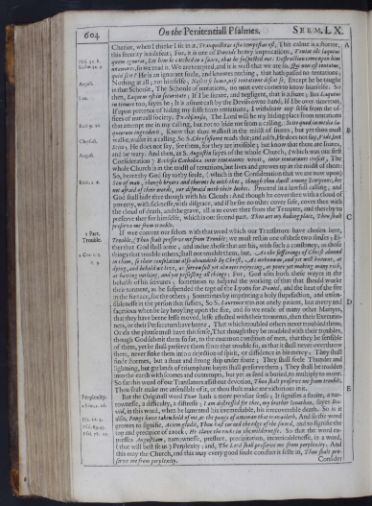 604
On the Penitentiall Psalmes.
Serm. LX.
Chariot, when I thinke I sit in it. Tranquillitas ista tempestas est, This calme is a storme,
604
On the Penitentiall Psalmes.
Serm. LX.
Chariot, when I thinke I sit in it. Tranquillitas ista tempestas est, This calme is a storme,
this security is a defeat; For, it is one of Davids heavy imprecations, Veniat illi laqueus
quem ignorat,Psal. 35.8.
Ecclus. 34.9. Let him be catched in a snare, that he suspected not: Destruction come upon him
unawares, so we read it. We are tempted, and it is well that we are so. Qui non est tentatus,
quid scit? He is an ignorant soule, and knowes nothing, that hath passed no tentations;
Nothing at all;August. not himselfe; Nescit se homo, nisi tentatione discat se, Except he be taught
in that Schoole, The Schoole of tentations, no man ever comes to know himselfe. So
then, Leo. Laqueus est in securitate; If I be secure, and negligent, that is a snare; But Laqueus
in timore too, sayes he; It is a snare cast by the Devils owne hand, If I be over-timerous,
If upon pretence of hiding my selfe from tentations, I withdraw my selfe from the of-
fices of mutuall society. Tu absconsio, The Lord will be my hiding place from tentations
that attempt me in my calling, Eccl. 9.20. but not to hide me from a calling. Scito quod in medio la-
queorum ingrederis, Know that thou walkest in the midst of snares, but yet thou must
walke, Chrysost. walke in a calling. So S. Chrysostome reads that; and adds, He does not say, Vide, but
Scito; He does not say, see them, for they are invisible; but know that there are snares,
and be wary.August. And then, as S. Augustin sayes of the whole Church, (which was our first
Consideration) Ecclesia Catholica inter tentationes vivit, inter tentationes crescit, The
whole Church is in the midst of tentations, but lives and growes up in the midst of them:
So, heare thy God say to thy soule, (which is the Consideration that we are now upon)
Son of man,Ezek. 2.6. though bryars and thornes be with thee, though thou dwell among Scorpions, bee
not afraid of their words, nor dismaid with their lookes. Proceed in a lawfull calling, and
God shall hide thee though with his Clouds: And though he cover thee with a cloud of
poverty, with sicknesse, with disgrace, and if he see no other cover safe, cover thee with
the cloud of death, and the grave, all is to cover thee from the Tempter, and thereby to
preserve thee for himselfe, which is our second part, Thou art my hiding place, Thou shalt
preserve me from trouble.
If wee content our selves with that word which our Translators have chosen here,
Trouble,2 Part.
Trouble. (Thou shalt preserve me from Trouble) we must rest in one of these two senses; Ei-
ther that God shall arme, and indue those that are his, with such a constancy, as those
things that trouble others, 2 Cor. 1.5. shall not trouble them, but, As the sufferings of Christ abound
in them,2 Cor. 6.9. so their consolation also aboundeth by Christ, As unknowne, and yet well knowne, as
dying, and behold we live, as sorrowfull yet alwayes rejoycing, as poore yet making many rich,
as having nothing, and yet possessing all things; For, God uses both these wayes in the
behalfe of his servants; sometimes to suspend the working of that that should worke
their torment, as he suspended the rage of the Lyons for Daniel, and the heat of the fire
in the furnace, for the others; Sometimes by imprinting a holy stupefaction, and unsen-
siblenesse in the person that suffers, So S. Laurence was not onely patient, but merry and
facetious when he lay broyling upon the fire, and so we reade of many other Martyrs,
that they have beene lesse moved, lesse affected with their torments, then their Executio-
ners, or their Persecutors have beene, That which troubled others never troubled them;
Or els the phrase must have this sense, That though they be troubled with their troubles,
though God submit them so far, to the common condition of men, that they be sensible
of them, yet he shall preserve them from that trouble so, as that it shall never overthrow
them, never sinke them into a dejection of spirit, or diffidence in his mercy; They shall
finde stormes, but a stout and strong ship under foote; They shall feele Thunder and
lightning, but garlands of triumphant bayes shall preserve them; They shall be trodden
into the earth with scornes and contempts, but yet as seed is buried, to multiply to more.
So far this word of our Translators assist our devotion, Thou shalt preserve me from trouble,
Thou shalt make me unsensible of it, or thou shalt make me victorious in it.
But the Originall word Tzur hath a more peculiar sense;Perplexity. It signifies a straite, a nar-
rownesse, a difficulty, 2 Sam. 1.26. a distresse; I am distressed for thee, my brother Ionathan, sayes Da-
vid, in this word, when he lamented his irremediable, his irrecoverable death. So is it
also, Esa. 21.3. Pangs have taken hold of me, as the pangs of a woman that travaileth. And so the word
growes to signifie, Psal. 89.43. Aciem gladii, Thou hast turned the edge of the sword, and to signifie the
top and precipice of a rock;Psal. 78.15. He clave the rocks in the wildernesse. So that the word ex-
presses Angustiam, narrownesse, pressure, precipitation, inextricablenesse, in a word,
(that will best fit us) Perplexity; and, The Lord shall preserve me from perplexity; And
this may the Church, and this may every good soule comfort it selfe in, Thou shalt pre-
serve me from perplexity. Consider
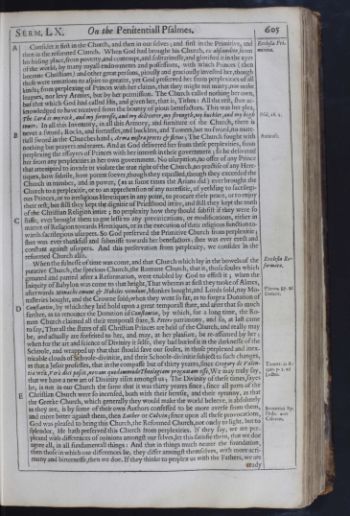 Serm. LX.
On the Penitentiall Psalmes.
605
Consider it first in the Church, and then in our selves; and first in the Primitive, Ecclesia Pri-
Serm. LX.
On the Penitentiall Psalmes.
605
Consider it first in the Church, and then in our selves; and first in the Primitive, Ecclesia Pri-mitiva. and
then in the reformed Church. When God had brought his Church, ex abscondito, from
his hiding place, from poverty, and contempt, and solitarinesse, and glorified it in the eyes
of the world, by many royall endowments and possessions, with which Princes (then
become Christians) and other great persons, piously and graciously invested her, though
these were tentations to aspire to greater, yet God preserved her from perplexities of all
kinds; from perplexing of Princes with her claims, that they might not marry, nor make
leagues, nor levy Armies, but by her permission. The Church called nothing her own,
but that which God had called His, and given her, that is, Tithes: All the rest, shee ac-
knowledged to have received from the bounty of pious benefactors. This was her plea,
The Lord is my rock, and my fortresse, and my deliverer, my strength, my buckler,Psal. 18.2. and my high
tower. In all this Inventory, in all this Armory, and furniture of the Church, there is
never a sword; Rocks, and fortresses, and bucklers, and Towers, but no sword, no mate-
riall sword in the Churches hand; Arma nostra preces & fletus;Ambrose. The Church fought with
nothing but prayers and teares. And as God delivered her from these perplexities, from
perplexing the affayres of Princes with her interest in their government; so he delivered
her from any perplexities in her own government. No usurpation, no offer of any Prince
that attempted to invade or violate the true right of the Church, no practise of any Here-
tiques, how subtile, how potent soever, though they equalled, though they exceeded the
Church in number, and in power, (as at some times the Arians did) ever brought the
Church to a perplexitie, or to an apprehension of any necessitie, of yeelding to sacrilegi-
ous Princes, or to irreligious Heretiques in any point, to procure their peace, or to enjoy
their rest, but still they kept the dignitie of Priesthood intire, and still they kept the truth
of the Christian Religion intire; no perplexity how they should subsist if they were so
stiffe, ever brought them to goe lesse to any prevarications, or modifications, either in
matter of Religion towards Heretiques, or in the execution of their religious function to-
wards sacrilegious usurpers. So God preserved the Primitive Church from perplexitie;
shee was ever thankfull and submisse towards her benefactors; shee was ever erect and
constant against usurpers. And this preservation from perplexity, we consider in the
reformed Church also.
When the fulnesse of time was come, Ecclesia Re-
formata. and that Church which lay in the bowels of the
putative Church, the specious Church, the Romane Church, that is, those soules which
groaned and panted after a Reformation, were enabled by God to effect it; when the
Iniquity of Babylon was come to that height, That whereas at first they tooke of Almes,
afterwards Monachi emunt & Nobiles vendunt, Monkes bought, and Lords sold, Hieron. Ep. ad
Demetr. nay Mo-
nasteries bought, and the Crowne sold; when they went so far, as to forge a Donation of
Constantin, by which they laid hold upon a great temporall state, and after that so much
farther, as to renounce the Donation of Constantin, by which, for a long time, the Ro-
man Church claimed all their temporall state, S. Peters patrimony, and so, at last came
to say, That all the states of all Christian Princes are held of the Church, and really may
be, and actually are forfeited to her, and may, at her pleasure, be re-assumed by her;
when for the art and science of Divinity it selfe, they had buried it in the darknesse of the
Schoole, and wrapped up that that should save our soules, in those perplexed and inex-
tricable clouds of Schoole-divinitie, and their Schoole-divinitie subject to such changes,
as that a Jesuit professes, that in the compasse but of thirty yeares, Tanner. in A-
quin. p. 1. ad
Lector. since Gregory de Valen-
tia writ, Verè dici possit, novam quodammodo Theologiam prognatam esse, We may truly say,
that we have a new art of Divinity risen amongst us; The Divinity of these times, sayes
he, is not in our Church the same that it was thirty yeares since; since all parts of the
Christian Church were so incensed, both with their heresie, and their tyranny, as that
the Greeke Church, which generally they would make the world beleeve, is absolutely
as they are, is by some of their own Authors confessed to be more averse from them,
Stenartius Ep.
Dedic. ante
Calecam. and more bitter against them, then Luther or Calvin; since upon all these provocations,
God was pleased to bring this Church, the Reformed Church, not onely to light, but to
splendor, He hath preserved this Church from perplexities. If they say, we are per-
plexed with differences of opinions amongst our selves, let this satisfie them, that we doe
agree all, in all fundamentall things: And that in things much nearer the foundation,
then those in which our differences lie, they differ amongst themselves, with more acri-
mony and bitternesse, then we doe. If they thinke to perplex us with the Fathers, we are ready
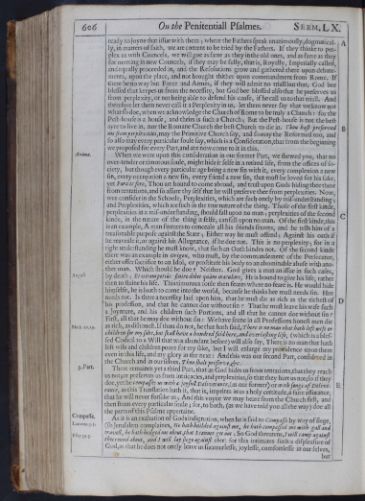 606
On the Penitentiall Psalmes.
Serm. LX.
ready to joyne that issue with them; where the Fathers speak unanimously, dogmatical-
606
On the Penitentiall Psalmes.
Serm. LX.
ready to joyne that issue with them; where the Fathers speak unanimously, dogmatical-ly, in matters of faith, we are content to be tried by the Fathers. If they thinke to per-
plex us with Councels, we will goe as farre as they in the old ones, and as farre as they
for meeting in new Councels, if they may be fully, that is, Royally, Imperially called,
and equally proceeded in, and the Resolutions grow and gathered there upon debate-
ments, upon the place, and not brought thither upon commandment from Rome. If
there be no way but Force and Armes, if they will admit no triall but that, God bee
blessed that keepes us from the necessity, but God bee blessed also that he preserves us
from perplexity, or not being able to defend his cause, if he call us to that triall. And
therefore let them never call it a Perplexity in us, let them never say that we know not
what to doe, when we acknowledge the Church of Rome to be truly a Church: for the
Pest-house is a house, and theirs is such a Church; But the Pest-house is not the best
ayre to live in, nor the Romane Church the best Church to die in. Thou hast preserved
me from perplexities, may the Primitive Church say, and so may the Reformed too, and
so also may every particular soule say, which is a Consideration, that from the beginning
we proposed for every Part, and are now come to it in this.
When we were upon this consideration in our former Part, Anima. we shewed you, that no
over-tender or timorous soule, might hide it selfe in a retired life, from the offices of so-
ciety, but though every particular age bring a new sin with it, every complexion a new
sin, every occupation a new sin, every friend a new sin, that must be loved for his sake,
yet Para te foro, Thou art bound to come abroad, and trust upon Gods hiding thee there
from tentations, and so assure thy self that he will preserve thee from perplexities. Now,
wee consider in the Schoole, Perplexities, which are such onely by mis-understanding;
and Perplexities, which are such in the true nature of the thing. Those of the first kinde,
perplexities in a mis-understanding, should fall upon no man; perplexities of the second
kinde, in the nature of the thing it selfe, can fall upon no man. Of the first kinde, this
is an example, A man sweares to conceale all his friends secrets, and he tells him of a
treasonable purpose against the State; Either way he must offend; Against his oath if
he reaveale it, or against his Allegeance, if he doe not. This is no perplexity; for in a
right understanding he must know, that such an Oath bindes not. Of the second kinde
there was an example in Origen, who must, by the commandement of the Persecutor,
either offer sacrifice to an Idol, or prostitute his body to an abominable abuse with ano-
ther man. Which should he doe? Neither. God gives a man an issue in such cases,
by death;August. Et vitam potiùs finire dèbet quàm maculare, He is bound to give his life, rather
then to staine his life. This timorous soule then feares where no feare is. He would hide
himselfe, he is loath to come into the world, because he thinks hee must needs sin. Hee
needs not. Is there a necessity laid upon him, that he must die as rich as the richest of
his profession, and that he cannot doe without sin? That he must leave his wife such
a Joynture, and his children such Portions, and all that he cannot doe without sin?
First, all that he may doe without sin: We have seene in all Professions honest men die
as rich, Mark 10.29. as dishonest. If thou do not, he that hath said, There is no man that hath left wife or
children for my sake, but shall have a hundred fold here, and everlasting life, (which is a bles-
sed Codicil to a Will that was abundant before) will also say, There is no man that hath
left wife and children poore for my sake, but I will enlarge my providence upon them
even in this life, and my glory in the next: And this was our second Part, considered in
the Church and in our selves, Thou shalt preserve, &c.
There remaines yet a third Part, 3. Part. that as God hides us from tentations, that they reach
us not; or preserves us from intricacies, and perplexities, so that they hurt us not; so if they
doe, yet he compasses us with a joyfull Deliverance, (as our former) or with songs of Delive-
rance, as this Translation hath it, that is, imprints in us a holy certitude, a faire assurance,
that he will never forsake us; And this voyce we may heare from the Church first, and
then from every particular soule; for, to both, (as we have told you all the way) doe all
the parts of this Psalme appertaine.
As it is an exaltation of Gods indignation, Compasse.
Lament. 3.5. when he is said to Compasse by way of siege,
(so Jerusalem complaines, He hath builded against me, he hath compassed me with gall and
travell, he hath hedged me about, that I cannot get out; So God threatens, I will camp against
thee round about,Esay 39.3. and I will lay siege against thee) for this intimates such a displeasure of
God, as that he does not onely leave us succourlesse, joylesse, comfortlesse in our selves, but
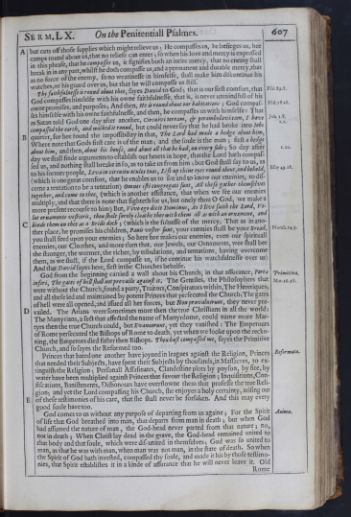 Serm. LVX.
On the Penitentiall Psalmes.
607
but cuts off those supplies which might relieve us; He compasses us, he besieges us, hee
Serm. LVX.
On the Penitentiall Psalmes.
607
but cuts off those supplies which might relieve us; He compasses us, he besieges us, hee
camps round about us, that no reliefe can enter; so when his love and mercy is expressed
in this phrase, that he compasses us, it signifies both an intire mercy, that no enemy shall
break in in any part, whilst he doth compasse us, and a permanent and durable mercy, that
as no force of the enemy, so no wearinesse in himselfe, shall make him discontinue his
watches, or his guard over us, but that he will compasse us still.
Thy faithfulnesse is round about thee, sayes David to God; that is our first comfort, Psal. 89.8. that
God compasses himselfe with his owne faithfulnesse, that is, is never unmindfull of his
owne promises, and purposes; And then, He is round about our habitations;Psal. 78.28. God compas-
ses himselfe with his owne faithfulnesse, and then, he compasses us with himselfe: That
as Satan told God one day after another, Circuivi terram, & perambulavi eam,Job 1.8. I have
compassed the earth, and walked it round,Job 2.2. but could never say that he had broke into Iobs
quarter, for hee found the impossibility in that, The Lord had made a hedge about him,
Where note that Gods first care is of the man; and the soule is the man; first a hedge
about him, and then, about his house, and about all that he had, on every side;Job 1.10. So day after
day we shall finde arguments to establish our hearts in hope, that the Lord hath compas-
sed us, and nothing shall breake in so, as to take us from him; but God shall say to us, as
to his former people, Leva in circuitu oculos tuos, Lift up thine eyes round about,Esay 49.18. and behold,
(which is one great comfort, that he enables us to see and to know our enemies, to dis-
cerne a tentation to be a tentation) Omnes isti congregati sunt, All these gather themselves
together, and come to thee, (which is another assistance, that when we see our enemies
multiply, and that there is none that fighteth for us, but onely thou O God, we make a
more present recourse to him) But, Vivo ego dicit Dominus, As I live saith the Lord, Ve-
lut ornamento vestieris, thou shalt surely cloathe thee with them all as with an ornament, and
binde them on thee as a Bride doth; (which is the fulnesse of the mercy, That as in ano-
ther place, he promises his children, Panis vester sunt, your enemies shall be your Bread,
Numb. 14.9. you shall feed upon your enemies; So here hee makes our enemies, even our spirituall
enemies, our Cloathes, and more then that, our Jewels, our Ornaments, wee shall bee
the stronger, the warmer, the richer, by tribulations, and tentations, having overcome
them, as we shall, if the Lord compasse us, if he continue his watchfulnesse over us)
And that David sayes here, first in the Churches behalfe.
God from the beginning carried a wall about his Church, in that assurance, Primitiva.
Mat. 16.18. Portæ
inferi, The gates of hell shall not prevaile against it. The Gentiles, the Philosophers that
were without the Church, found a party, Traitors, Conspirators within, The Heretiques;
and all these led and maintained by potent Princes that persecuted the Church; The gates
of hell were all opened, and issued all her forces, but Non prævaluerunt, they never pre-
vailed. The Arians were sometimes more then the true Christians in all the world:
The Martyrians, a sect that affected the name of Martyrdome, could name more Mar-
tyrs then the true Church could, but Evanuerunt, yet they vanished: The Emperours
of Rome persecuted the Bishops of Rome to death, yet when we looke upon the recko-
ning, the Emperors died faster then Bishops. Thou hast compassed me, sayes the Primitive
Church, and so sayes the Reformed too.
Princes that hated one another have joyned in leagues against the Religion, Reformata. Princes
that needed their Subjects, have spent their Subjects by thousands, in Massacres, to ex-
tinguish the Religion; Personall Assasinates, Clandestine plots by poyson, by fire, by
water have been multiplied against Princes that favour the Religion; Inquisitions, Con-
fiscations, Banishments, Dishonours have overflowne them that professe the true Reli-
gion; and yet the Lord compassing his Church, she enjoyes a holy certainty, arising out
of these testimonies of his care, that she shall never be forsaken. And this may every
good soule have too.
God comes to us without any purpose of departing from us againe;Anima. For the Spirit
of life that God breated into man, that departs from man in death; but when God
had assumed the nature of man, the God-head never parted from that nature; no,
not in death; When Christ lay dead in the grave, the God-head remained united to
that body and that soule, which were dis-united in themselves; God was so united to
man, as that he was with man, when man was not man, in the state of death. So when
the Spirit of God hath invested, compassed thy soule, and made it his by those testimo-
nies, that Spirit establishes it in a kinde of assurance that he will never leave it. Old Rome
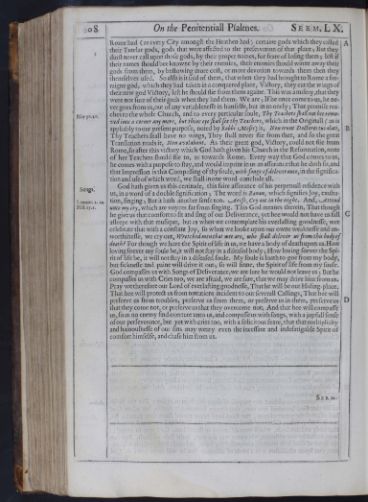 608
On the Penitentiall Psalmes.
Serm. LX.
Rome had (as every City amongst the Heathen had) certaine gods which they called
608
On the Penitentiall Psalmes.
Serm. LX.
Rome had (as every City amongst the Heathen had) certaine gods which they called
their Tutelar gods, gods that were affected to the preservation of that place; But they
durst never call upon those gods, by their proper names, for feare of losing them; lest if
their names should bee knowne by their enemies, their enemies should winne away their
gods from them, by bestowing more cost, or more devotion towards them then they
themselves used. So also is it said of them, that when they had brought to Rome a for-
raigne god, which they had taken in a conquered place, Victory, they cut the wings of
their new god Victory, lest he should flie from them againe. This was a misery, that they
were not sure of their gods when they had them. We are; If he once come to us, he ne-
ver goes from us, out of any variablenesse in himselfe, but in us onely; That promise rea-
ches to the whole Church, Esay 30.20. and to every particular soule, Thy Teachers shall not bee remo-
ved into a corner any more, but thine eye shall see thy Teachers, which in the Originall (as is
appliably to our present purpose, noted by Rabbi Moses) is, Non erunt Doctores tui alati,
Thy Teachers shall have no wings, They shall never flie from thee, and so the great
Translation reads it, Non avolabunt. As their great god, Victory, could not flie from
Rome, so after this victory which God hath given his Church in the Reformation, none
of her Teachers should flie to, or towards Rome. Every way that God comes to us,
he comes with a purpose to stay, and would imprint in us an assurance that he doth so, and
that Impression is this Compassing of thy soule, with songs of deliverance, in the significa-
tion and use of which word, we shall in one word conclude all.
God hath given us this certitude, Songs. this faire assurance of his perpetuall residence with
us, in a word of a double signification; The word is Ranan, which signifies Joy, exulta-
tion, singing;Lament. 2.14.
Psal. 17.1. But it hath another sense too. Arise, Cry out in the night. And, Attend
unto my cry, which are voyces far from singing. This God meanes therein, That though
he give us that comfort to sit and sing of our Deliverance, yet hee would not have us fall
asleepe with that musique, but as when we contemplate his everlasting goodnesse, wee
celebrate that with a constant Joy, so when we looke upon our owne weaknesse and un-
worthinesse, we cry out, Wretched men that wee are, who shall deliver us from this body of
death? For though we have the Spirit of life in us, we have a body of death upon us. How
loving soever my soule be, it will not stay in a diseased body; How loving soever the Spi-
rit of life be, it will not stay in a diseased soule. My soule is loath to goe from my body,
but sicknesse and paine will drive it out; so will sinne, the Spirit of life from my soule.
God compasses us with Songs of Deliverance, we are sure he would not leave us; But he
compasses us with Cries too, we are afraid, we are sure, that we may drive him from us.
Pray we therefore our Lord of everlasting goodnesse, That he will be our Hiding-place,
That hee will protect us from tentations incident to our severall Callings, That hee will
preserve us from troubles, preserve us from them, or preserve us in them, preserve us
that they come not, or preserve us that they overcome not; And that hee will compasse
us, so as no enemy find overture unto us, and compasse us with songs, with a joyfull sense
of our perseverance, but yet with cries too, with a solicitous feare, that that multiplicity
and hainousnesse of our sins may weary even the incessant and indefatigable Spirit of
comfort himselfe, and chase him from us. Serm.
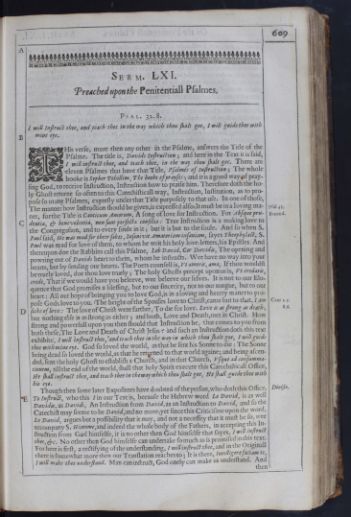 607
607
Serm. LXI.
Preached upon the Penitentiall Psalmes.
Psal. 32.8.
I will Instruct thee, and teach thee in the way which thou shalt goe, I will guide thee with
mine eye.
THisThis verse, more then any other in the Psalme, answers the Title of the
Psalme. The title is, Davids Instruction; and here in the Text it is said,
I will instruct thee, and teach thee, in the way thou shalt goe. There are
eleven Psalmes that have that Title, Psalmes of Instruction; The whole
booke is Sepher Tehillim, The booke of prayses; and it is a good way of pray-
sing God, to receive Instruction, Instruction how to praise him. Therefore doth the ho-
ly Ghost returne so often to this Catechisticall way, Instruction, Institution, as to pro-
pose so many Psalmes, expresly under that Title purposely to that use. In one of those,
The manner how Instruction should be given, is expressed also;Psal. 45.
Bernard. It must be in a loving ma-
ner, for the Title is Canticum Amorum, A song of love for Instruction. For Absque pru-
dentia, & benevolentia, non sunt perfecta consilia: True Instruction is a making love to
the Congregation, and to every soule in it; but it is but to the soule. And so when S.
Paul said, He was mad for their sakes, Insanivit Amatoriam insaniam, sayes Theophylact, S.
Paul was mad for love of them, to whom he writ his holy love-letters, his Epistles. And
thereupon doe the Rabbins call this Psalme, Leb David, Cor Davidis, The opening and
powring out of Davids heart to them, whom he instructs. Wee have no way into your
hearts, but by sending our hearts. The Poets counsell is, Vt ameris, ama, If thou wouldst
be truely loved, doe thou love truely; The holy Ghosts precept upon us is, Vt credaris,
crede, That if we would have you beleeve, wee beleeve our selves. It is not to our Elo-
quence that God promises a blessing, but to our sincerity, not to our tongue, but to our
heart: All our hope of bringing you to love God, is in a loving and hearty maner to pro-
pose Gods love to you. The height of the Spouses love to Christ, came but to that, Cant. 2.5.
8.5 I am
sicke of love: The love of Christ went farther, To die for love. Love is as strong as death;
but nothing else is as strong as either; and both, Love and Death, met in Christ. How
strong and powerfull upon you then should that Instruction be, that comes to you from
both these, The Love and Death of Christ Jesus? and such an Instruction doth this text
exhibite, I will instruct thee, and teach thee in the way in which thou shalt goe, I will guide
thee with mine eye. God so loved the world, as that he sent his Sonne to die: The Sonne
being dead so loved the world, as that he returned to that world againe; and being ascen-
ded; sent the holy Ghost to establish a Church, and in that Church, Vsque ad consumma-
tionem, till the end of the world, shall that holy Spirit execute this Catechisticall Office,
He shall instruct thee, and teach thee in the way which thou shalt goe, He shall guide thee with
his eye. Though then some later Expositors have doubted of the person, who doth this Office, Divisio.
To Instruct, who this I in our Text is, because the Hebrew word Le David, is as well
Davidis, as Davidi, An Instruction from David, as an Instruction to David, and so the
Catechist may seeme to be David, and no more; yet since this Criticisme upon the word,
Le David, argues but a possibility that it may, and not a necessity that it must be so, wee
accompany S. Hierome, and indeed the whole body of the Fathers, in accepting this In-
struction from God himselfe, it is no other then God himselfe that sayes, I will instruct
thee, &c. No other then God himselfe can undertake so much as is promised in this text.
For here is first, a rectifying of the understanding, I will instruct thee, and in the Originall
there is somewhat more then our Translation reaches to; It is there, Intelligere faciam te,
I will make thee understand. Man can instruct, God onely can make us understand. And then
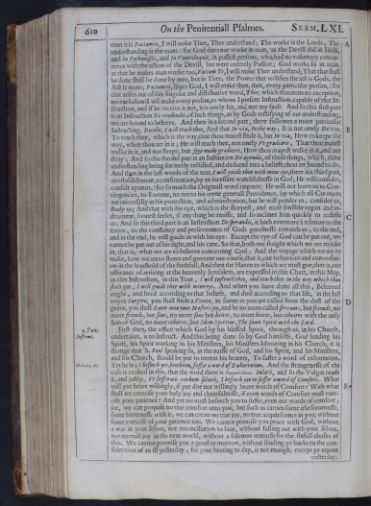 610
On the Penitentiall Psalmes.
Serm. LXI.
then it is Faciam te, I will make Thee, Thee understand; The worke is the Lords, The
610
On the Penitentiall Psalmes.
Serm. LXI.
then it is Faciam te, I will make Thee, Thee understand; The worke is the Lords, The
understanding is the mans: for God does not worke in man, as the Devill did in Idols,
and In Pythonissis, and In Ventriloquis, in possest persons, who had no voluntary concur-
rence with the action of the Devill, but were meerely Passive; God works so in man,
as that he makes man worke too, Faciam Te, I will make Thee understand; That that shall
be done shall be done by mee, but in Thee; the Power that rectifies the act is Gods, the
Act is mans; Faciam te, sayes God, I will make thee, thee, every particular person, (for
that arises out of this singular and distributive word, Thee, which threatens no exception,
no exclusion) I wil make every person, to whom I present Instruction, capable of that In-
struction, and if he receive it not, it is onely his, and not my fault. And so this first part
is an Instruction De credendis, of such things, as by Gods rectifying of our understanding,
we are bound to beleeve. And then in a second part, there followes a more particular
Instructing, Docebo, I will teach thee, And that In via, In the way; It is not onely De via,
To teach thee, which is the way, that thou maiest finde it, but In via, How to keepe the
way, when thou art in it; He will teach thee, not onely Vt gradiaris, That thou maiest
walke in it, and not sleepe, but Quo modo gradieris, How thou mayest walke in it, and not
stray; And so this second part is an Institution De agendis, of those things, which, thine
understanding being formerly rectified, and deduced into a beliefe, thou art bound to do.
And then in the last words of the text, I will guide thee with mine eye, there is a third part,
an establishment, a confirmation, by an incessant watchfulnesse in God; He will consider,
consult upon us, (for so much the Originall word imports) He will not leave us to Con-
tingencies, to Fortune, no nor to his owne generall Providence, by which all Creatures
are universally in his protection, and administration, but he will ponder us, consider us,
study us; And that with his eye, which is the sharpest, and most sensible organ and in-
strument, soonest feeles, if any thing be amisse, and so inclines him quickly to rectifie
us; And so this third part is an Instruction De sperandis, it hath evermore a relation to the
future, to the constancy and perseverance of Gods goodnesse towards us; to the end,
and in the end, he will guide us with his eye: Except the eye of God can be put out, we
cannot be put out of his sight, and his care. So that, both our fraight which we are to take
in, that is, what we are to beleeve concerning God; And the voyage which we are to
make, how we are to steere and governe our course, that is, our behaviour and conversati-
on in the houshold of the faithfull; And then the Haven to which we must goe, that is, our
assurance of arriving at the heavenly Jerusalem, are expressed in this Chart, in this Map,
in this Instruction, in this Text, I will Instruct thee, and teach thee in the way which thou
shalt goe, I will guide thee with mine eye. And when you have done all this, Beleeved
aright, and lived according to that beliefe, and died according to that life, in the last
voyce Surgite, you shall finde a Venite, as soone as you are called from the dust of the
grave, you shall Enter into your Masters joy, and be no more called servants, but friends, no
more friends, but sons, no more sons but heires, no more heires, but coheires with the only
Son of God, no more coheires, but Idem Spiritus, The same Spirit with the Lord. First then, 1. Part. the office which God by his blessed Spirit, through us, in his Church,
undertakes, is toInstruit. Instruct. And this being done so by God himselfe, God sending his
Spirit, his Spirit working in his Ministers, his Ministers labouring in his Church, it is
strange that S. Paul speaking so, in the name of God, and his Spirit, and his Ministers,
and his Church, should be put to intreat his hearers, To suffer a word of exhortation.
Yet he is;Heb. 13.22. I beseech yee, brethren, suffer a word of Exhortation. And the strangenesse of the
case is exalted in this, that the word there is Παρακλήσεως, Solatii, and so the Vulgat reads
it, and justly, Vt sufferatis verbum solatii, I beseech yee to suffer a word of Comfort. What
will yee heare willingly, if yee doe not willingly heare words of Comfort? With what
shall we exercise your holy joy and chearfulnesse, if even words of Comfort must exer-
cise your patience? And yet we must beseech you to suffer, even our words of comfort;
for, we can propose no true comfort unto you, but such as carries some irkesomenesse,
some bitternesse with it; we can create no true joy, no true acquiescence in you, without
some exercise of your patience too. We cannot promise you peace with God, without
a war in your selves, nor reconciliation to him, without falling out with your selves,
nor eternall joy in the next world, without a solemne remorse for the sinfull abuses of
this. We cannot promise you a good to morrow, without sending ye backe to the con-
sideration of an ill yesterday; for your hearing to day, is not enough, except ye repent yesterday.
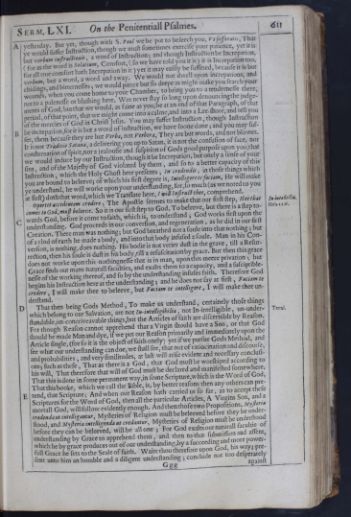 Serm. LXI.
On the Penitentiall Psalmes.
611
yesterday. But yet, though with S. Paul we be put to beseech you, Vt sufferatis, That
Serm. LXI.
On the Penitentiall Psalmes.
611
yesterday. But yet, though with S. Paul we be put to beseech you, Vt sufferatis, That
ye would suffer Instruction, though we must sometimes exercise your patience, yet it is
but verbum instructionis, a word of Instruction; and though Instruction be Increpation,
(for as the word is Solatium, Comfort, (so we have told you it is) it is Increpation too,
for all true comfort hath Increpation in it) yet it may easily be suffered, because it is but
verbum, but a word, a word and away. We would not dwell upon increpations, and
chidings, and bitternesses; we would pierce but so deepe as might make you search your
wounds, when you come home to your Chamber, to bring you to a tendernesse there,
not to a palenesse or blushing here. Wee never stay so long upon denouncing the judge-
ments of God, but that we would, as faine as you, be at an end of that Paragraph, of that
period, of that point, that we might come into a calme, and into a Lee-shore, and tell you
of the mercies of God in Christ Jesus. You may suffer Instruction, though Instruction
be increpation, for it is but a word of instruction, we have soone done; and you may suf-
fer, them, because they are but Verba, not Verbera, They are but words, and not blowes.
It is not Traditio Satanæ, a delivering you up to Satan, it is not the confusion of face, nor
consternation of spirit, nor a jealousie and suspition of Gods good purpose upon you, that
we would induce by our Instruction, though it be Increpation, but onely a sense of your
sins, and of the Majesty of God violated by them, and so to a better capacity of this
Instruction, which the Holy Ghost here presents, In credendis, in those things which
you are bound to beleeve; of which his first degree is, Intelligere te faciam, He will make
ye understand, he will worke upon your understanding, for, so much (as we noted to you
at first) doth that word, which we Translate here, I will Instruct thee, comprehend. Oportet accedentem credere; The Apostle seemes to make that our first step, In intellectu.
Heb. 11.6. Hee that
comes to God, must beleeve. So it is our first step to God, To beleeve, but there is a step to-
wards God, before it come to faith, which is, to understand; God works first upon the
understanding. God proceeds in our conversion, and regeneration, as he did in our first
Creation. There man was nothing; but God breathed not a soule into that nothing; but
of a clod of earth he made a body, and into that body infused a soule. Man in his Con-
version, is nothing, does nothing. His bodie is not verier dust in the grave, till a Resur-
rection, then his soule is dust in his body, till a resuscitation by grace. But then this grace
does not worke upon this nothingnesse that is in man, upon this meere privation; but
Grace finds out mans naturall faculties, and exalts them to a capacity, and a susciptible-
nesse of the working thereof, and so by the understanding infuses faith. Therefore God
begins his Instruction here at the understanding; and he does not say at first, Faciam te
credere, I will make thee to beleeve, but Faciam te intelligere, I will make thee un-
derstand. That then being Gods Method, To make us understand, certainely those things
which belong to our Salvation, are not In-intelligibilia, Tertul. not In-intelligible, un-under-
standable, un-conceiveavable things, but the Articles of faith are discernible by Reason.
For though Reason cannot apprehend that a Virgin should have a Son, or that God
should be made Man and dye, if we put our Reason primarily and immediately upon the
Article single, (for so it is the object of faith onely) yet if we pursue Gods Method, and
see what our understanding can doe, we shall see, that out of ratiocination and discourse,
and probabilities, and very similitudes, at last will arise evident and necessary conclusi-
ons; such as these, That as there is a God, that God must be worshiped according to
his will, That therefore that will of God must be declared and manifested somewhere,
That this is done in some permanent way, in some Scripture, which is the Word of God,
That this booke, which we call the Bible, is, by better reasons then any others can pre-
tend, that Scripture; And when our Reason hath carried us so far, as to accept these
Scriptures for the Word of God, then all the particular Articles, A Virgins Son, and a
mortall God, will follow evidently enough. And then those two Propositions, Mysteria
credenda ut intelligantur, Mysteries of Religion must be beleeved before they be under-
stood, and Mysteria intelligenda ut credantur, Mysteries of Religion must be understood
before they can be beleeved, will be all one; For God exalts our naturall facultie of
understanding by Grace to apprehend them, and then to that submission and assent,
which he by grace produces out of our understanding, by a succeeding and more power-
full Grace he sets to the Seale of faith. Waite thou therefore upon God, his way; pre-
sent unto him an humble and a diligent understanding; conclude not too desperately Ggg against
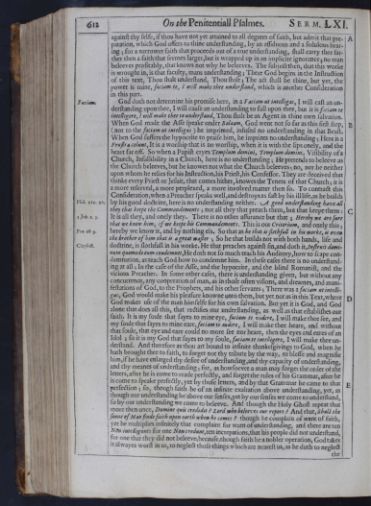 612
On the Penitentiall Psalmes.
Serm. LXI.
against thy selfe, if thou have not yet attained to all degrees of faith, but admit that pre-
612
On the Penitentiall Psalmes.
Serm. LXI.
against thy selfe, if thou have not yet attained to all degrees of faith, but admit that pre-paration, which God offers to thine understanding, by an assiduous and a sedulous hear-
ing; for a narrower faith that proceeds out of a true understanding, shall carry thee far-
ther then a faith that seemes larger, but is wrapped up in an implicite ignorance; no man
beleeves profitably, that knows not why he beleeves. The subject then, that this worke
is wrought in, is that faculty, mans understanding; There God begins in the Instruction
of this text, Thou shalt understand, Thou shalt; The act shall be thine, but yet, the
power is mine, faciam te, I will make thee understand, which is another Consideration
in this part. God doth not determine his promise here, Faciam. in a Faciam ut intelligas, I will cast an un-
derstanding upon thee, I will cause an understanding to fall upon thee, but it is faciam te
intelligere, I will make thee to understand, Thou shalt be an Agent in thine own salvation.
When God made the Asse speake under Balaam, God went not so far as this first step,
(not to the faciam ut intelligas) he imprinted, infused no understanding in that Beast.
When God suffers the hypocrite to praise him, he imprints no understanding; Here is a
Frustra colunt, It is a worship that is no worship, when it is with the lips onely, and the
heart far off. So when a Papist cryes Templum domini, Templum domini, Visibility of a
Church, Infallibility in a Church, here is no understanding; He pretends to beleeve as
the Church beleeves, but he knowes not what the Church beleeves; no, nor he neither
upon whom he relies for his Instruction, his Priest, his Confessor. They are deceived that
thinke every Priest or Jesuit, that comes hither, knowes the Tenets of that Church; it is
a more reserved, a more perplexed, a more involved matter then so. To contract this
Consideration, when a Preacher speaks well, and destroys as fast by his ill life, as he builds
by his good doctrine, Psal. 111.10. here is no understanding neither. A good understanding have all
they that keepe the Commandements; not all they that preach them, but that keepe them:
It is all they, 1 Joh. 2.3. and onely they. There is no other assurance but that; Hereby we are sure
that we know him, if we keepe his Commandements. This is our Criterium, and onely this;
hereby we know it, Pro. 18.9. and by nothing els. So that as he that is slothfull in his worke, is even
the brother of him that is a great waster; So he that builds not with both hands, life and
doctrine, Chrysost. is slothfull in his worke. He that preaches against sin, and doth it, Instruit domi-
num quomodo eum condemnet, He doth not so much teach his Auditory, how to scape con-
demnation, as teach God how to condemne him. In these cases there is no understand-
ing at all; In the case of the Asse, and the hypocrite, and the blind Romanist, and the
vicious Preacher. In some other cases, there is understanding given, but without any
concurrence, any cooperation of man, as in those often visions, and dreames, and mani-
festations of God, to the Prophets, and his other servants; There was a faciam ut intelli-
gas, God would make his pleasure knowne unto them, but yet not as in this Text, where
God makes use of the man himselfe for his own salvation. But yet it is God, and God
alone that does all this, that rectifies our understanding, as well as that establishes our
faith. It is my soule that sayes to mine eye, faciam te videre, I will make thee see, and
my soule that sayes to mine eare, faciam te audire, I will make thee heare, and without
that soule, that eye and eare could no more see nor heare, then the eyes and eares of an
Idol; so it is my God that sayes to my soule, faciam te intelligere, I will make thee un-
derstand. And therefore as thou art bound to infinite thankesgivings to God, when he
hath brought thee to faith, to forget not thy tribute by the way, to blesse and magnifie
him, if he have enlarged thy desire of understanding, and thy capacity of understanding,
and thy meanes of understanding; for, as howsoever a man may forget the order of the
letters, after he is come to reade perfectly, and forget the rules of his Grammar, after he
is come to speake perfectly, yet by those letters, and by that Grammar he came to that
perfection; so, though faith be of an infinite exaltation above understanding, yet, as
though our understanding be above our senses, yet by our senses we come to understand,
so by our understanding we come to beleeve. And though the Holy Ghost repeat that
more then once, Domine quis credidit? Lord who beleeves our report? And that, Shall the
sonne of Man finde faith upon earth when he comes? though he complain of want of faith,
yet he multiplies infinitely that complaint for want of understanding, and there are ten
Non intelligunts for one Non credunt, ten increpations, that his people did not understand,
for one that they did not beleeve; because, though faith be a nobler operation, God takes
it alwayes worst in us, to neglect those things which are nearest us, as he doth to neglect the
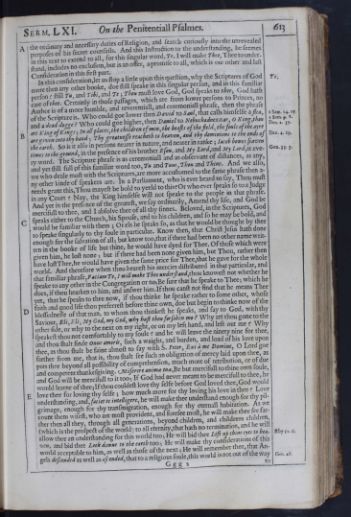 Serm. LXI.
On the Penitentiall Psalmes.
613
the ordinary and necessary duties of Religion, and search curiously into the unrevealed
Serm. LXI.
On the Penitentiall Psalmes.
613
the ordinary and necessary duties of Religion, and search curiously into the unrevealed
purposes of his secret counsails. And this Instruction to the understanding, he seemes
in this text to extend to all, for this singular word, Te, I will make Thee, Thee to under-
stand, includes no exclusion, but is an offer, a promise to all, which is our other and last
Consideration in this first part. In this consideration, let us stop a little upon this question, Te. why the Scriptures of God
more then any other booke, doe still speake in this singular person, and in this familiar
person? still Tu, and Tibi, and Te; Thou must love God, God speaks to thee, God hath
care of thee. Certainly in those passages, which are from lower persons to Princes, no
Author is of a more humble, and reverentiall, and ceremoniall phrase, then the phrase
of the Scripture is. Who could goe lower then David to Saul, that calls himselfe a 1 Sam. 24.15 flea,
and a 2 Sam. 9.8
Dan. 2.37 dead dogge? Who could goe higher, then Daniel to Nebuchadnezzar, O King, thou
art King of Kings; In all places, the children of men, the beasts of the field, the fouls of the ayre
are given into thy hand; Dan. 4.19. Thy greatnesse reacheth to heaven, and thy dominions to the ends of
the earth. So is it also in persons nearer in nature, and nearer in ranke; Iacob bowes seaven
times to the ground, in the presence of his brother Esau, and My Lord, and My Lord, Gen. 33.3. at eve-
ry word. The Scripture phrase is as ceremoniall and as observant of distances, as any,
and yet still full of this familiar word too, Tu and Tuus, Thou and Thine. And we also,
we who deale most with the Scriptures, are more accustomed to the same phrase then a-
ny other kinde of speakers are. In a Parliament, who is ever heard to say, Thou must
needs grant this, Thou mayest be bold to yeeld to this? Or who ever speaks so to a Judge
in any Court? Nay, the King himselfe will not speake to the people in that phrase.
And yet in the presence of the greatest, we say ordinarily, Amend thy life, and God be
mercifull to thee, and I absolve thee of all thy sinnes. Beloved, in the Scriptures, God
speaks either to the Church, his Spouse, and to his children, and so he may be bold, and
would be familiar with them; Or els he speaks so, as that he would be thought by thee
to speake singularly to thy soule in particular. Know then, that Christ Jesus hath done
enough for the salvation of all; but know too, that if there had been no other name writ-
ten in the booke of life but thine, he would have dyed for Thee. Of those which were
given him, he lost none; but if there had been none given him, but Thou, rather then
have lost Thee, he would have given the same price for Thee, that he gave for the whole
world. And therefore when thou hearest his mercies distributed in that particular, and
that familiar phrase, Faciam Te, I will make Thee understand, thou knowest not whether he
speake to any other in the Congregation or no; Be sure that he speake to Thee; which he
does, if thou hearken to him, and answer him. If thou canst not find that he means Thee
yet, that he speaks to thee now, if thou thinke he speake rather to some other, whose
faith and good life thou preferrest before thine own, doe but begin to thinke now of the
blessednesse of that man, to whom thou thinkest he speaks, and say to God, with thy
Saviour, Eli, Eli, My God, my God, why hast thou forsaken me? Why art thou gone to the
other side, or why to the next on my right, or on my left hand, and left out me? Why
speakest thou not comfortably to my soule? and he will leave the ninety nine for thee,
and thou shalt finde Onus amoris, such a waight, and burden, and load of his love upon
thee, as thou shalt be faine almost to say with S. Peter, Exi à me Domine, O Lord goe
farther from me, that is, thou shalt see such an obligation of mercy laid upon thee, as
puts thee beyond all possibility of comprehension, much more of retribution, or of due
and competent thankesgiving. Miserere animæ tuæ, Be but mercifull to thine own soule,
and God will be mercifull to it too; If God had never meant to be mercifull to thee, he
would learne of thee; If thou couldest love thy selfe before God loved thee, God would
love thee for loving thy selfe; how much more for thy loving his love in thee? Love
understanding, and, faciet te intelligere, he will make thee understand enough for thy pil-
grimage, enough for thy transmigration, enough for thy eternall habitation. As we
count them wisest, who are most provident, and foresee most, he will make thee see far-
ther then all they, through all generations, beyond children, and childrens children,
(which is the prospect of the world) to all eternity, that hath no termination, and he will
allow thee an understanding for this world too; He will bid thee Esay 51.6. Lift up thine eyes to hea-
ven, and bid thee Look downe to the earth too; He will make thy considerations of this
world acceptable to him, as well as those of the next; He will remember thee, that An-
gels descended as well as ascended, that to a religious soule, Gen. 28. this world is not out of the way Ggg2 to
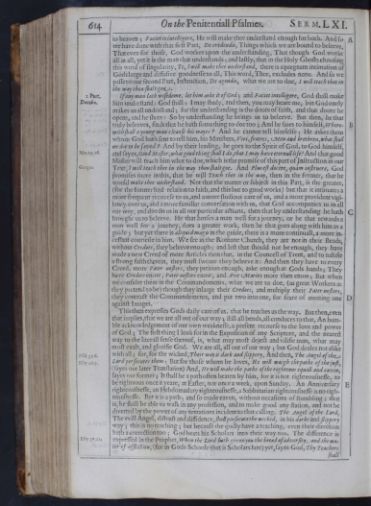 614
On the Penitentiall Psalmes.
Serm. LXI.
to heaven; Faciet te intelligere, He will make thee understand enough for both. And so
614
On the Penitentiall Psalmes.
Serm. LXI.
to heaven; Faciet te intelligere, He will make thee understand enough for both. And so
we have done with that first Part, De credendis, Things which we are bound to beleeve,
That even for those, God workes upon the understanding, That though God worke
all in all, yet it is the man that understands; and lastly, that in the Holy Ghosts choosing
this word of singularity, Te, I will make thee understand, there is pregnant intimation of
Gods large and diffusive goodnesse to all, This word, Thee, excludes none. And so we
passe to our second Part, Instruction, De agendis, what we are to doe, I will teach thee in
the way thou shalt goe. If any man lack wisedome, let him aske it of God; 2 Part.
Docebo. and Faciet intelligere, God shall make
him understand: God shall; I may study, and then, you may heare me, but God onely
makes us all understand; for the understanding is the doore of faith, and that doore he
opens, and he shuts: So by understanding he brings us to beleeve. But then, he that
truly beleeves, finds that he hath something to doe too; And he saies to himself, Where-
with shall a young man cleanse his wayes? And he cannot tell himselfe; He askes them
whom God hath sent to tell him, his Ministers, Viri, fratres, Men and brethren, what shall
we doe to be saved? And by their leading, he goes to the Spirit of God, to God himself,
and sayes, Mat. 19.16. Good Master, what good thing shall I do, that I may have eternall life? And that good
Master will teach him what to doe, which is the promise of this part of Instruction in our
Text, Gregor. I will teach thee in the way thou shalt goe. And Plus est docere, quàm instruere, God
promises more in this, that he will Teach thee in the way, then in the former, that he
would make thee understand. Not that the matter or subject in this Part, is the greater,
(for the former had relation to faith, and this but to good works) but that it intimates a
more frequent recourse to us, and a more studious care of us, and a more provident vigi-
lancy over us, and a more familiar conversation with us, that God accompanies us in all
our way, and directs us in all our particular actions, then that by understanding he hath
brought us to beleeve. He that horses a man well for a journey, or he that rewards a
man well for a journey, does a greater work, then he that goes along with him as a
guide; but yet there is aliquid magis in the guide, there is a more continuall, a more in-
cessant courtesie in him. We see in the Romane Church, they are not in their Beads,
without Credoes, they beleeve enough; and lest that should not be enough, they have
made a new Creed of more Articles then that, in the Councell of Trent, and to testifie
a strong faith therein, they must sweare they beleeve it: And then they have to every
Creed, more Pater nosters, they petition enough, aske enough at Gods hands; They
have Credoes enow, Pater nosters enow, and Ave Maries more then enow; But when
we consider them in the Commandements, what we are to doe, (as great Workers as
they pretend to be) though they inlarge their Credoes, and multiply their Pater nosters,
they contract the Commandements, and put two into one, for feare of meeting one
against Images. This then expresses Gods daily care of us, that he teaches us the way. But then, even
that implies, that we are all out of our way; still all bends, all conduces to that, An hum-
ble acknowledgement of our own weaknesse, a present recourse to the love and power
of God; The first thing I look for in the Exposition of any Scripture, and the nearest
way to the literall sense thereof, is, what may most deject and vilifie man, what may
most exalt, and glorifie God. We are all, all out of our way; but God deales not alike
with all;Psal. 35.6. for, for the wicked, Their way is dark and slippery, And then, The Angel of the
Lord persecutes them; But for those whom he loves, Esay 26.7. He will waigh the paths of the just,
(sayes our later Translation) And, He will make the paths of the righteous equall and eaven,
sayes our former; It shall be a path often beaten by him, for it is not righteousnesse, to
be righteous once a yeare, at Easter, nor once a week, upon Sunday. An Anniversary
righteousnesse, an Hebdomadary righteousnesse, a Sabbatarian righteousnesse is no righ-
teousnesse. But it is a path; and so made eaven, without occasions of stumbling; that
is, he shall be able to walk in any profession, and to make good any station, and not be
diverted by the power of any tentations incident to that calling. The Angel of the Lord,
The evill Angel, distrust and diffidence, shall persecute the wicked, in his darke and slippery
way; this is no teaching; but because the godly have a teaching, even their direction
hath a correction too; God beats his Scholars into their way too. The difference is
expressed in the Prophet, Esay 30.21. When the Lord hath given you the bread of adversity, and the wa-
ter of affliction, (for in Gods Schoole that is Scholars fare) yet, sayes God, Thy Teachers shall
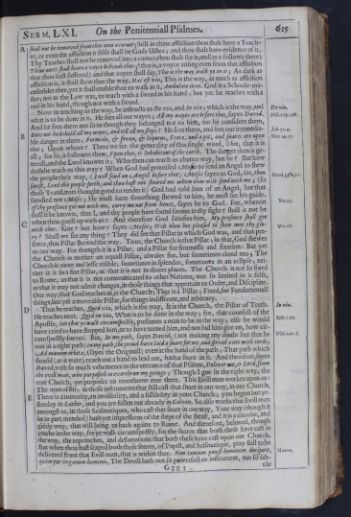 Serm. LXI.
On the Penitentiall Psalmes.
615
shall not be removed from thee into a corner; Still in thine affliction thou shalt have a Teach-
Serm. LXI.
On the Penitentiall Psalmes.
615
shall not be removed from thee into a corner; Still in thine affliction thou shalt have a Teach-er, or even the affliction it selfe shall be Gods Usher; and thou shalt have evidence of it,
Thy Teacher shall not be removed into a corner; thou shalt see it; and (as it follows there)
Thine eares shall heare a voyce behinde thee; (that is, a voyce arising even from that affliction
that thou hast suffered) and that voyce shall say, This is the way, walk ye in it; As dark as
affliction is, it shall shew thee the way, Hæc est via, This is the way, as much as affliction
enfeebles thee, yet it shall enable thee to walk in it, Ambulate in ea. God is a Schoole-ma-
ster; not as the Law was, to teach with a sword in his hand; but yet he teaches with a
rod in his hand, though not with a sword. Now in teaching us the way, he instructs us De via, and In via; which is the way, De via. and
what is to be done in it. He sees all our wayes; Psal. 119.168. All my wayes are before thee, sayes David.
And he sees them not so as though they belonged not to him, for he considers them,
Job 31.4 Does not he behold all my wayes, and tell all my steps? He sees them, and sees our irremedia-
ble danger in them; Formido, & fovea, & laqueus, Esay 24.17 Feare, and a pit, and snares are upon
thee; Upon whom? There we see the generality of this single word, Thee, that it is
all; for so, it followes there, Vpon thee, O Inhabitant of the earth. The danger then is ge-
nerall, and the Lord knowes it; Who then can teach us a better way, but he? But how
doth he teach us this way? When God had promised Moses to send an Angel to shew
the people their way, (I will send an Angel before thee) Moses sayes to God, Exod. 33.2, 12. See, thou
sayest, Lead this people forth, and thou hast not shewed me whom thou wilt send with me; (so
those Translators thought good to render it) God had told him of an Angel, but that
satisfied not Moses; He must have something shewed to him, he must see his guide.
Ver. 15. If thy presence goe not with me, carry me not from hence, sayes he to God. For, wherein
shall it be known, that I, and thy people have found favour in thy sight? shall it not be
when thou goest up with us? And therefore God satisfies him, My presence shall goe
with thee. Goe? but how? sayes Moses; Wilt thou bee pleased to shew mee thy glo-
ry?Ver. 18. Shall we see any thing? They did see that Pillar in which God was, and that pre-
sence, that Pillar shewed the way. To us, the Church is that Pillar; in that, God shewes
us our way. For strength it is a Pillar, and a Pillar for firmnesse and fixation: But yet
the Church is neither an equall Pillar, alwaies fire, but sometimes cloud too; The
Church is more and lesse visible, sometimes in splendor, sometimes in an eclipse; nei-
ther is it so a fixt Pillar, as that it is not in divers places. The Church is not so fixed
to Rome, as that it is not communicated to other Nations, nor so limited in it selfe,
as that it may not admit changes, in those things that appertain to Order, and Discipline.
Our way, that God teaches us, is the Church; That is a Pillar; Fixed, for Fundamentall
things, but yet a moveable Pillar, for things indifferent, and arbitrary. Thus he teaches, Quid via, In via. which is the way, It is the Church, the Pillar of Truth.
He teaches next, Quid in via, What is to be done in the way; for, that counsell of the
Apostle, See that ye walk circumspectly, presumes a man to be in the way;Eph. 5.15. else he would
have cried to have stopped him, or to have turned him, and not bid him goe on, how cir-
cumspectly soever. But, In my path, sayes David, Psal. 140.5. (not making any doubt but that he
was in a right path) in my path, the proud have laid a snare for me, and spread a net with cords;
Ad manum orbitæ, (sayes the Originall) even at the hand of the path; That path which
should (as it were) reach out a hand to lead me, hath a snare in it. And therefore, sayes
David, with so much vehemence in the entrance of that Psalme, Deliver me, O Lord, from
the evill man, who purposeth to overthrow my goings; Though I goe in the right way, the
true Church, yet purposes to overthrow mee there. This Evill man workes upon us:
The man of sin; in those instruments that still cast that snare in our way, in our Church,
There is a minority, an invisibility, and a fallibility in your Church; you begun but ye-
sterday in Luther, and you are fallen out already in Calvin. So also works this Evill man
amongst us, in those Scismatiques, who cast that snare in our way, Your way (though it
be in part mended) hath yet impressions of the steps of the Beast, and it is a circular, and
giddy way, that will bring us back againe to Rome. And therefore, beloved, though
you be in the way, see ye walk circumspectly, for the snares that both these have cast in
the way, the reproaches, and defamations that both these have cast upon our Church.
But when thou hast scaped both these snares, of Papist, and Scismatique, pray still to be
delivered from that Evill man, that is within thee. Non tantùm potest hominem decipere, Hieron.
quàm per Organum hominis, The Devill hath not so powerfull an instrument, nor so sub-
Ggg3 tile
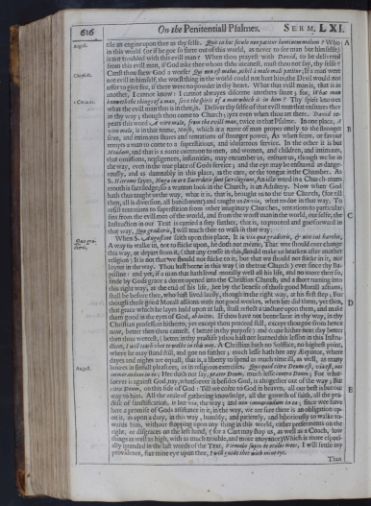 616
On the Penitentiall Psalmes.
Serm. LXI.
tile an engine upon thee as thy selfe.August. Quis in hoc seculo non patitur hominem malum? Who
616
On the Penitentiall Psalmes.
Serm. LXI.
tile an engine upon thee as thy selfe.August. Quis in hoc seculo non patitur hominem malum? Who
in this world (or if he goe so farre out of this world, as never to see man but himselfe)
is not troubled with this evill man? When thou prayest with David, to be delivered
from this evill man, if God aske thee whom thou meanest, must thou not say, thy selfe?
Canst thou shew God a worse?Chrysost. Qui non est malus, nihil à malo mali patitur; If a man were
not evill in himself, the worst thing in the world could not hurt him; the Devil would not
offer to give fire, if there were no powder in thy heart. What that evill man is, that is in
another, I cannot know: I cannot alwayes discerne anothers snare; for, What man
knoweth the things of a man, save the spirit of a man which is in him? 1 Cor. 2.11. Thy spirit knowes
what the evill man that is in thee, is. Deliver thy selfe of that evill man that ensnares thee
in thy way; though thou come to Church; yea even when thou art there. David re-
peats this word A viro malo, from the evill man, twice in that Psalme. In one place, A
viro malo, is in that name, Meish, which is a name of man proper onely to the stronger
sexe, and intimates snares and tentations of stronger power, As when feare, or favour
tempts a man to come to a superstitious, and idolatrous service. In the other it is but
Meadam, and that is a name common to men, and women, and children, and intimates,
that omissions, negligences, infirmities, may encumber us, ensnare us, though we be in
the way, even in the true place of Gods service; and the eye may be ensnared as dange-
rously, and as damnably in this place, as the eare, or the tongue in the Chamber. As
S. Hierome sayes, Nugæ in ore Sacerdotis sunt sacrilegium, An idle word in a Church-mans
mouth is sacriledge; so a wanton look in the Church, is an Adultery. Now when God
hath thus taught us the way, what it is, that is, brought us to the true Church, (for till
then, all is diversion, all banishment) and taught us In via, what to doe in that way, To
resist tentations to superstition from other imaginary Churches, tentations to particular
sins from the evill men of the world, and from the worst man in the world, our selfe, the
Instruction in our Text is carried a step farther, that is, to proceed and goe forward in
that way, Qua gradieris, I will teach thee to walk in that way. When S. Augustine saith upon this place, Qua gra-
dieris. It is via qua gradieris, & non cui hærebis,
A way to walke in, not to sticke upon, he doth not meane, That wee should ever change
this way, or depart from it, (that any crosse in this, should make us hearken after another
religion) It is not that we should not sticke to it, but that we should not sticke in it, nor
loyter in the way. Thou hast beene in this way (in the true Church) ever since thy Ba-
ptisme: and yet, if a man that hath lived morally well all his life, and no more then so,
finde by Gods grace a doore opened into the Christian Church, and a short turning into
this right way, at the end of his life, hee by the benefit of those good Morall actions,
shall be before thee, who hast lived lazily, though in the right way, at his first step; For
though those good Morall actions were not good workes, when hee did them, yet then,
that grace which he layes hold upon at last, shall reflect a tincture upon them, and make
them good in the eyes of God, ab initio. If thou have not beene lazie in thy way, in thy
Christian profession hitherto, yet except thou proceed still, except thou goe from hence
now, better then thou camest, (better in thy purpose) and come hither next day better
then thou wentest, (better in thy practise) thou hast not learned this lesson in this Instru-
ction, I will teach thee to walke in this way. A Christian hath no Solstice, no highest point,
where he may stand still, and goe no farther; much lesse hath hee any Æquator, where
dayes and nights are equall, that is, a liberty to spend as much time ill, as well, as many
houres in sinfull pleasures, August. as in religious exercises. Quicquid citra Deum est, via est, nec
immorandum in ea; Hee doth not say, præter Deum, much lesse contra Deum; For what-
soever is against God, nay, whatsoever is besides God, is altogether out of the way; But
citra Deum, on this side of God: Till we come to God in heaven, all our best is but our
way to him. All the zeale of gathering knowledge, all the growth of faith, all the pra-
ctise of sanctification, is but via, the way; and non immorandum in ea; since wee have
here a promise of Gods assistance in it, in the way, we are sure there is an obligation up-
on it, as upon a duty, in this way, humbly, and patiently, and laboriously to walke to-
wards him, without stopping upon any thing in this world, either preferments on the
right, or disgraces on the left hand, (for a Cart may stop us, as well as a Coach, low
things as well as high, with as much trouble, and more anoyance) Which is more especi-
ally intended in the last words of the Text, Firmabo super te oculos meos, I will settle my
providence, fixe mine eye upon thee, I will guide thee with mine eye. Thus
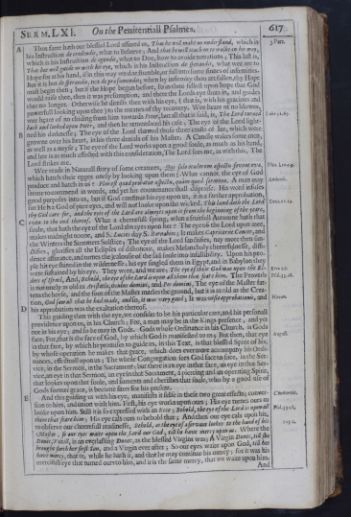 Serm. LXI.
On the Penitentiall Psalmes.
617
Thus farre hath our blessed Lord assured us, That he will make us understand, 3 Part. which is
Serm. LXI.
On the Penitentiall Psalmes.
617
Thus farre hath our blessed Lord assured us, That he will make us understand, 3 Part. which is
his Instruction de credendis, what to Beleeve; And that he will teach us to walke in his way,
which is his Instruction de agendis, what to Doe, how to avoide tentations; This last is,
That hee will guide us with his eye, which is his Instruction de sperandis, what wee are to
Hope for at his hand, if in this way we doe stumble, or fall into some sinnes of infirmities.
But it is but de sperandis, not de præsumendis; when by infirmity thou art fallen, thy Hope
must begin then; but if the Hope begun before, so as thou fellest upon hope that God
would raise thee, then it was presumption, and there the Lords eye shuts in, and guides
thee no longer. Otherwise he directs thee with his eye, (that is, with his gracious and
powerfull looking upon thee) to the meanes of thy recovery. Wee heare of no blowes,
wee heare of no chiding from him towards Peter, but all that is said, is, Luke 22.65. The Lord turned
back and looked upon Peter, and then he remembred his case; The eye of the Lord light-
ned his darknesse; The eye of the Lord thawed those three crusts of Ice, which were
growne over his heart, in his three denials of his Master. A Candle wakes some men,
as well as a noyse; The eye of the Lord works upon a good soule, as much as his hand,
and hee is as much affected with this consideration, The Lord sees me, as with this, The
Lord strikes me. Wee reade in Naturall story of some creatures, Plin. l. 10. c. 9. Qui solo oculorum aspectu fovent ova,
which hatch their egges onely by looking upon them; What cannot the eye of God
produce and hatch in us? Plus est quod probatur aspectu, quàm quod sermone.Ambrose. A man may
seeme to commend in words, and yet his countenance shall dispraise. His word infuses
good purposes into us, but if God continue his eye upon us, it is a farther approbation,
for He is a God of pure eyes, and will not looke upon the wicked.Deut. 11.12. This land doth the Lord
thy God care for, and the eyes of the Lord are alwayes upon it from the beginning of the yeare,
even to the end thereof. What a cheerefull spring, what a fruitfull Autumne hath that
soule, that hath the eye of the Lord alwayes upon her? The eye of the Lord upon mee,
makes midnight noone, and S. Lucies day S. Barnabies; It makes Capricorne Cancer, and
the Winters the Summers Solstice; The eye of the Lord sanctifies, nay more then san-
ctifies, glorifies all the Eclipses of dishonour, makes Melancholy cheerefulnesse, diffi-
dence assurance, and turnes the jealousie of the sad soule into infallibility. Upon his peo-
ple his eye shined in the wildernesse; his eye singled them in Egypt, and in Babylon they
were sustained by his eye. They were, and we are;Ezra 5.5. The eye of their God was upon the El-
ders of Israel, And, Psal. 33.18. Behold, the eye of the Lord is upon all them that feare him. The Proverb
is not onely as old as Aristotle, Oculus domini, and Pes domini, The eye of the Master fat-
tens the horse, and the foot of the Master marles the ground, but it is as old as the Crea-
tion, God saw all that he had made, and so, it was very good; It was visio approbationis, Hieron. and
his approbation was the exaltation thereof. This guiding then with the eye, we consider to be his particular care, and his personall
providence upon us, in his Church; For, a man may be in the Kings presence, and yet
not in his eye; and so he may in Gods. Gods whole Ordinance in his Church, is Gods
face; For, that is the face of God, by which God is manifested to us; But then, August. that eye
in that face, by which he promises to guide us, in this Text, is that blessed Spirit of his,
by whose operation he makes that grace, which does evermore accompany his Ordi-
nances, effectuall upon us; The whole Congregation sees God face to face, in the Ser-
vice, in the Sermon, in the Sacrament; but there is an eye in that face, an eye in that Ser-
vice, an eye in that Sermon, an eye in that Sacrament, a piercing and an operating Spirit,
that lookes upon that soule, and foments and cherishes that soule, who by a good use of
Gods former grace, is become fitter for his present. And this guiding us with his eye, manifests it selfe in these two great effects;Convertit. conver-
sion to him, and union with him. First, his eye works upon ours; His eye turnes ours to
looke upon him. Still it is so expressed with an Ecce; Psal. 33.18. Behold, the eye of the Lord is upon all
them that feare him; His eye cals ours to behold that; And then our eye cals upon his,
to observe our cheerefull readinesse, 123.2. Behold, as the eye of a servant lookes to the hand of his
Master, so our eyes waite upon the Lord our God, till he have mercy upon us. Where the
Donec, Vntill, is an everlasting Donec, as the blessed Virgins was; A Virgin Donec, till she
brought forth her first Son, and a Virgin ever after; So our eyes waite upon God, till hee
have mercy, that is, while he hath it, and that he may continue his mercy; for it was his
mercifull eye that turned ours to him, and it is the same mercy, that we waite upon him. And
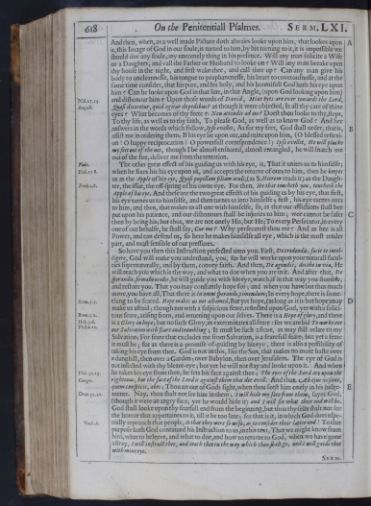 618
On the Penitentiall Psalmes.
Serm. LXI.
And then, when, as a well made Picture doth alwaies looke upon him, that lookes upon
618
On the Penitentiall Psalmes.
Serm. LXI.
And then, when, as a well made Picture doth alwaies looke upon him, that lookes upon
it, this Image of God in our soule, is turned to him, by his turning to it, it is impossible we
should doe any foule, any uncomely thing in his presence. Will any man solicite a Wife
or a Daughter, and call the Father or Husband to looke on? Will any man breake open
thy house in the night, and first wake thee, and call thee up? Can any man give his
body to uncleannesse, his tongue to prophanenesse, his heart to covetousnesse, and at the
same time consider, that his pure, and his holy, and his bountifull God hath his eye upon
him? Can he looke upon God in that line, in that Angle, (upon God looking upon him)
and dishonour him?Psal. 25.15. Upon those words of David, Mine eyes are ever towards the Lord,
August. Quasi diceretur, quid agitur depedibus? as though it were objected, Is all thy care of thine
eyes? What becomes of thy feete? Non attendis ad eos? Doest thou looke to thy steps,
To thy life, as well as to thy faith, To please God, as well as to know God? And hee
answers in the words which follow, Ipse evellet, As for my feet, God shall order, that is,
assist me in ordering them; If his eye be upon me, and mine upon him, (O blessed reflexi-
on! O happy reciprocation! O powerfull correspondence!) Ipse evellet, He will plucke
my feet out of the net, though I be almost ensnared, almost entangled, he will snatch me
out of the fire, deliver me from the tentation. The other great effect of his guiding us with his eye, Vnit. is, That it unites us to himselfe;
when he fixes his hishis eye upon us, and accepts the returne of ours to him, then he keepes Psal. 17.8.
us as the Apple of his eye, Quasi pupillam filiam oculi, (as S. Hierom reads it) as the Daugh-
ter, the issue, Zech. 2.8. the off-spring of his owne eye. For then, He that toucheth you, toucheth the
Apple of his eye. And these are the two great effects of his guiding us by his eye, that first,
his eye turnes us to himselfe, and then turnes us into himselfe; first, his eye turnes ours
to him, and then, that makes us all one with himselfe, so, as that our afflictions shall bee
put upon his patience, and our dishonours shall be injuries to him; wee cannot be safer
then by being his; but thus, we are not onely His, but He; To every Persecutor, in every
one of our behalfe, he shall say, Cur me? Why persecutest thou me? And as hee is all
Power, and can defend us, so here he makes himselfe all eye, which is the most tender
part, and most sensible of our pressures. So have you then this Instruction perfected unto you. First, Decredendis, facit te intel-
ligere, God will make you understand, you, for he will worke upon your naturall facul-
ties supernaturally, and by them, convey faith. And then, De agendis, docebo in via, He
will teach you which is the way, and what to doe when you are in it. And after that, De
sperandis, firmabo oculos, he will guide you with his eye, watch, if in that way you stumble,
and restore you. That you may constantly hope for; and when you have but thus much
more, you have all, That there is In omni sperando, timendum; In every hope, there is some-
thing to be feared.Rom. 5.5. Hope makes us not ashamed, But yet hope, (as long as it is but hope) may
make us afraid; though not with a suspicious feare, reflected upon God, yet with a solici-
tous feare, arising from, and returning upon our selves. There is a Rom. 5.2. Hope of glory, and there
is a Heb. 3.6. Glory in hope; but no such Glory, as exterminates all feare: for we are bid To worke out
our Salvation with feare and trembling; Phil. 2.12. It must be such a feare, as may still relate to my
Salvation; For feare that excludes me from Salvation, is a fearefull feare; but yet a feare
it must be; for as there is a promise of guiding by his eye, there is also a possibility of
taking his eye from thee. God is not in this, like the Sun, that makes no more haste over
a dunghill, then over a Garden; over Babylon, then over Jerusalem. The eye of God is
not infected with thy bleare-eye; but yet he will not stay and looke upon it. And when
he takes his eye from thee, Psal. 34.13. he sets his face against thee; The eyes of the Lord are upon the
righteous, but the face of the Lord is against them that doe evill. And thus, Gregor. Ab ejus visione,
quem conspicis, abes; Thou art out of Gods sight, when thou seest him onely in his judge-
ments. Nay, Deut. 32.20. thou shalt not see him in them; I will hide my face from them, sayes God,
(though it were an angry face, yet he would hide it) and I will see what their end will be.
God shall looke upon thy fearfull end from the beginning, but thou thy selfe shalt not see
the horror that appertaines to it, till it be too late; for that is it, in which God does espe-
cially reproach that people, Vers. 28. O that they were so wise, as to consider their latter end! To that
purpose hath God continued his Instruction to us, in this text, That we might know from
him, what to beleeve, and what to doe, and how to returne to God, when we have gone
astray, I will instruct thee, and teach thee in the way which thou shalt go, and I will guide thee
with mine eye. Serm.
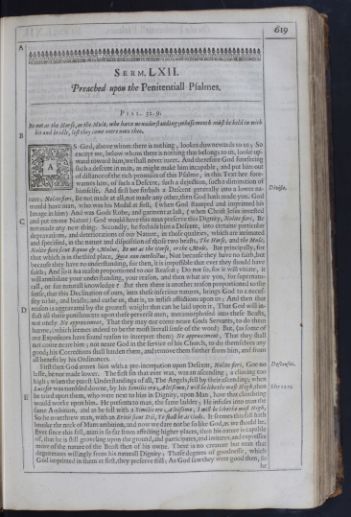 619
619
Serm. LXII.
Preached upon the Penitentiall Psalmes.
Psal. 32.9.
Be not as the Horse, or the Mule, who have no understanding; whose mouth must be held in with
bit and bridle, lest they come neere unto thee.
ASAs God, above whom there is nothing, lookes downewards to us; So
except we, below whom there is nothing that belongs to us, looke up-
ward toward him, we shall never meet. And therefore God foreseeing
such a descent in man, as might make him incapable, and put him out
of distance of the rich promises of this Psalme, in this Text hee fore-
warnes him, of such a Descent, such a dejection, such a diminution of
himselfe.Divisio. And first hee forbids a Descent generally into a lower na-
ture; Nolite fieri, Be not made at all, not made any other, then God hath made you. God
would have man, who was his Medal at first, (when God stamped and imprinted his
Image in him) And was Gods Robe, and garment at last, (when Christ Jesus invested
and put on our Nature) God would have this man preserve this Dignity, Nolite fieri, Be
not made any new thing. Secondly, he forbids him a Descent, into certaine particular
depravations, and deteriorations of our Nature, in those qualities, which are intimated
and specified, in the nature and disposition of those two beasts, The Horse, and the Mule,
Nolite fieri sicut Equus & Mulus, Be not as the Horse, or the Mule. But principally, for
that which is in the third place, Quia non intellectus, Not because they have no faith, but
because they have no understanding, for then, it is impossible that ever they should have
faith; And so it is a reason proportioned to our Reason; Do not so, for it will vitiate, it
will annihilate your understanding, your reason, and then what are you, for supernatu-
rall, or for naturall knowledge? But then there is another reason proportioned to the
sense, that this Declination of ours, into these inferiour natures, brings God to a neces-
sity to bit, and bridle, and curbe us, that is, to inflict afflictions upon us; And then that
reason is aggravated by the greatest waight that can be laid upon it, That God will in-
flict all these punishments upon these perverse men, metamorphosed into these Beasts,
not onely Ne approximent, That they may not come neare Gods Servants, to do them
harme, (which seemes indeed to be the most literall sense of the word) But, (as some of
our Expositors have found reason to interpret them) Ne approximent, That they shall
not come neare him; not neare God in the service of his Church, to do themselves any
good; his Corrections shall harden them, and remove them farther from him, and from
all benefit by his Ordinances.
First then God armes him with a pre-increpation upon Descent, Nolite fieri, Descensus. Goe no
lesse, be not made lower. The first sin that ever was, was an ascending, a climing too
high; when the purest Understandings of all, The Angels, fell by their ascending; when
Lucifer was tumbled downe, by his Similis ero Altissimo, I will be like the most High, Esay 14.14. then
he tried upon them, who were next to him in Dignity, upon Man, how that clambring
would worke upon him. He presents to man, the same ladder; He infuses into man the
same Ambition, and as he fell with a Similis ero Altissimo, I will be like the most High,
So he overthrew man, with an Eritis sicut Dii, Ye shall be as Gods. It seemes this fall hath
broake the neck of Mans ambition, and now we dare not be so like God, as we should be.
Ever since this fall, man is so far from affecting higher places, then his nature is capable
of, that he is still groveling upon the ground, and participates, and imitates, and expresses
more of the nature of the Beast then of his owne. There is no creature but man that
degenerates willingly from his naturall Dignity; Those degrees of goodnesse, which
God imprinted in them at first, they preserve still; As God saw they were good then, so he
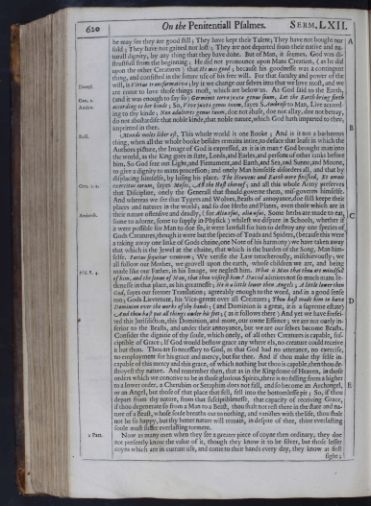 620
On the Penitentiall Psalmes.
Serm. LXII.
he may see they are good still; They have kept their Talent; They have not bought nor
620
On the Penitentiall Psalmes.
Serm. LXII.
he may see they are good still; They have kept their Talent; They have not bought nor
sold; They have not gained nor lost; They are not departed from their native and na-
turall dignity, by any thing that they have done. But of Man, it seemes, God was di-
strustfull from the beginning; He did not pronounce upon Mans Creation, (as he did
upon the other Creatures) that He was good; because his goodnesse was a contingent
thing, and consisted in the future use of his free will. For that faculty and power of the
will, Dionys. is Virtus transformativa; by it we change our selves into that we love most, and we
are come to love those things most, which are below us. As God said to the Earth,
(and it was enough to say so) Germinet terra juxta genus suum, Gen. 1. Let the Earth bring forth
according to her kinde;Ambro. So, Vive juxta genus tuum, sayes S. Ambrose to Man, Live accord-
ing to thy kinde; Non adulteres genus tuum, doe not abase, doe not allay, doe not betray,
do not abastardise that noble kinde, that noble nature, which God hath imparted to thee,
imprinted in thee.
Mundi moles liber est, Basil. This whole world is one Booke; And is it not a barbarous
thing, when all the whole booke besides remains intire, to deface that leafe in which the
Authors picture, the Image of God is expressed, as it is in man? God brought man into
the world, as the King goes in state, Lords, and Earles, and persons of other ranks before
him. So God sent out light, and Firmament, and Earth, and Sea, and Sunne, and Moone,
to give a dignity to mans procession; and onely Man himselfe disorders all, and that by
displacing himselfe, by losing his place. The Heavens and Earth were finished, Et omnis
exercitus eorum, Gen. 2.1. sayes Moses, All the Host thereof; and all this whole Army preserves
that Discipline, onely the Generall that should governe them, mis-governs himselfe.
And whereas we see that Tygers and Wolves, Beasts of annoyance, doe still keepe their
places and natures in the world; and so doe Herbs and Plants, even those which are in
their nature offensive and deadly, Ambrose. (for Alia esui, alia usui, Some herbs are made to eat,
some to adorne, some to supply in Physick) whilest we dispute in Schools, whether if
it were possible for Man to doe so, it were lawfull for him to destroy any one species of
Gods Creatures, though it were but the species of Toads and Spiders, (because this were
a taking away one linke of Gods chaine, one Note of his harmony) we have taken away
that which is the Jewel at the chaine, that which is the burden of the Song, Man him-
selfe. Partus sequitur ventrem; We verifie the Law treacherously, mischievously; we
all follow our Mother, we grovell upon the earth, whose children we are, and being
made like our Father, Psal. 8.4. in his Image, we neglect him. What is Man that thou art mindfull
of him, and the sonne of Man, that thou visitest him? David admires not so much mans lit-
tlenesse in that place, as his greatnesse; He is a little lower then Angels; A little lower then
God, sayes our former Translation; agreeably enough to the word, and in a good sense
too; Gods Lievtenant, his Vice-gerent over all Creatures; Thou hast made him to have
Dominion over the works of thy hands; (and Dominion is a great, it is a supreme estate)
And thou hast put all things under his feet; (as it follows there) And yet we have forfei-
ted this Jurisdiction, this Dominion, and more, our owne Essence; we are not onely in-
ferior to the Beasts, and under their annoyance, but we are our selves become Beasts.
Consider the dignitie of thy soule, which onely, of all other Creatures is capable, sus-
ciptible of Grace; If God would bestow grace any where els, no creature could receive
it but thou. Thou art so necessary to God, as that God had no utterance, no exercise,
no employment for his grace and mercy, but for thee. And if thou make thy selfe in-
capable of this mercy and this grace, of which nothing but thou is capable, then thou de-
stroyest thy nature. And remember then, that as in the Kingdome of Heaven, in those
orders which we conceive to be in those glorious Spirits, there is no falling from a higher
to a lower order, a Cherubim or Seraphim does not fall, and so become an Archangel,
or an Angel, but those of that place that fell, fell into the bottomlesse pit; So, if thou
depart from thy nature, from that susciptiblenesse, that capacity of receiving Grace,
if thou degenerate so from a Man to a Beast, thou shalt not rest there in the state and na-
ture of a Beast, whose soule breaths out to nothing, and vanishes with the life, thou shalt
not be so happy, but thy better nature will remain, in despite of thee, thine everlasting
soule must suffer everlasting torment.
Now as many men when they see a greater piece of coyne then ordinary, 2 Part. they doe
not presently know the value of it, though they know it to be silver, but those lesser
coyns which are in currant use, and come to their hands every day, they know at first sight;
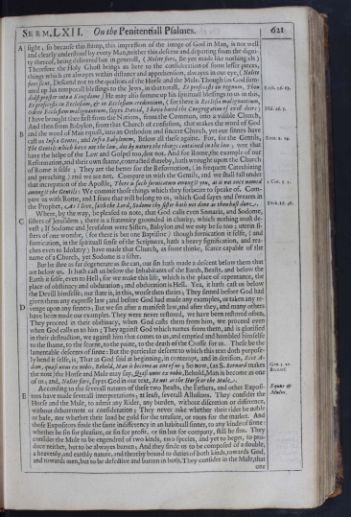 Serm. LXII.
On the Penitentiall Psalmes.
621
sight; so because this stamp, this impression of the image of God in Man, is not well
Serm. LXII.
On the Penitentiall Psalmes.
621
sight; so because this stamp, this impression of the image of God in Man, is not well
and clearly understood by every Man, neither this descent and departing from the digni-
ty thereof, being delivered but in generall, (Nolite fieri, Be yee made like nothing els)
Therefore the Holy Ghost brings us here to the consideration of some lesser pieces,
things which are alwayes within distance and apprehension, alwayes in our eye, (Nolite
fieri sicut, Descend not to the qualities of the Horse and the Mule. Though (as God sum-
med up his temporall blessings to the Jews, in that totall, Et profecisti in regnum, Ezek. 16.13. Thou
didst prosper into a Kingdome) He may also summe up his spirituall blessings to us in this,
Et profecisti in Ecclesiam, & in Ecclesiam credentium, (for there is Ecclesia malignantium,
Odivi Ecclesiam malignantium, sayes David, Psal. 26.5. I have hated the Congregation of evill doers)
I have brought thee first from the Nations, from the Common, into a visible Church,
And then from Babylon, from that Church of confusion, that makes the word of God
and the word of Man equall, into an Orthodox and sincere Church, yet our sinnes have
cast us Infra Gentes, and Infra Babylonem, Below all these againe. For, for the Gentils, Rom. 2.14.
The Gentils which have not the law, doe by nature the things contained in the law; wee that
have the helpe of the Law and Gospel too, doe not. And for Rome, the example of our
Reformation, and their own shame, contracted thereby, hath wrought upon the Church
of Rome it selfe; They are the better for the Reformation, (in frequent Catechizing
and preaching) and we are not. Compare us with the Gentils, and we shall fall under
that increpation of the Apostle, There is such fornication amongst you,1 Cor. 5.1. as is not once named
amongst the Gentils: We commit those things which they forbeare to speake of. Com-
pare us with Rome, and I feare that will belong to us, which God sayes and sweares in
the Prophet, As I live, saith the Lord, Sodome thy sister hath not done as thou hast done.Ezek. 16.48.
Where, by the way, be pleased to note, that God calls eyen Samaria, and Sodome,
sisters of Jerusalem; there is a fraternity grounded in charity, which nothing must de-
vest; If Sodome and Jerusalem were Sisters, Babylon and we may be so too; uterin si-
sters of one wombe, (for there is but one Baptisme) though fornication it selfe, (and
fornication, in the spirituall sense of the Scriptures, hath a heavy signification, and rea-
ches even to Idolatry) have made that Church, as some thinke, scarce capable of the
name of a Church, yet Sodome is a sister.
But be shee as far degenerate as she can, our sin hath made a descent below them that
are below us. It hath cast us below the Inhabitants of the Earth, Beasts, and below the
Earth it selfe, even to Hell; for we make this life, which is the place of repentance, the
place of obstinacy and obduration; and obduration is Hell. Yea, it hath cast us below
the Devill himselfe; our state is, in this, worse then theirs; They sinned before God had
given them any expresse law; and before God had made any examples, or taken any re-
venge upon any sinners; But we sin after a manifest law, and after they, and many others
have been made our examples. They were never restored, we have been restored often;
They proceed in their obstinacy, when God casts them from him, we proceed even
when God calls us to him; They against God which turnes from them, and is glorified
in their destruction, we against him that comes to us, and emptied and humbled himselfe
to the shame, to the scorne, to the paine, to the death of the Crosse for us. These be the
lamentable descents of sinne: But the particular descent to which this text doth purpose-
ly bend it selfe, is, That as God said at beginning, in contempt, and in derision, Ecce A-
dam, quasi unus ex nobis, Behold, Man is become as one of us; So now, Gen. 3.22.
Bernard. (as S. Bernard makes
the note) the Horse and Mule may say, Quasi unus ex nobis, Behold, Man is become as one
of us; and, Nolite fieri, sayes God in our text, Be not as the Horse or the Mule.
According to the severall natures of these two Beasts, Equus &
Mulus. the Fathers, and other Exposi-
tors have made severall interpretations; at least, severall Allusions. They consider the
Horse and the Mule, to admit any Rider, any burden, without discretion or difference,
without debatement or consideration; They never aske whether their rider be noble
or base, nor whether their load be gold for the treasure, or roots for the market. And
those Expositors finde the same indifferency in an habituall sinner, to any kinde of sinne:
whether he sin for pleasure, or sin for profit, or sin but for company, still he sins. They
consider the Mule to be engendred of two kinds, two species, and yet to beget, to pro-
duce neither, but to be alwayes barren; And they finde us to be composed of a double,
a heavenly, and earthly nature, and thereby bound to duties of both kinds, towards God,
and towards men, but to be defective and barren in both. They consider in the Mule, that one
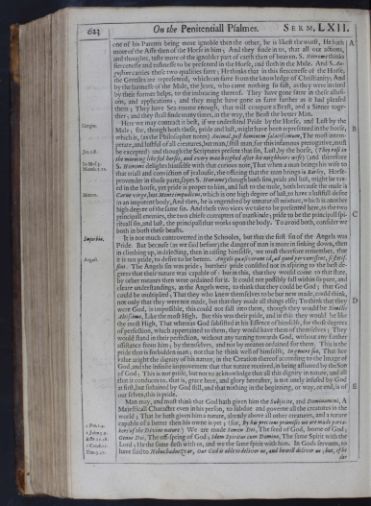 623622
On the Penitentiall Psalmes.
Serm. LXII.
one of his Parents being more ignoble then the other, he is likest the worst, He hath
623622
On the Penitentiall Psalmes.
Serm. LXII.
one of his Parents being more ignoble then the other, he is likest the worst, He hath
more of the Asse then of the Horse in him; And they finde in us, that all our actions,
and thoughts, taste more of the ignobler part of earth then of heaven. S. Hierome thinks
fiercenesse and rashnesse to be presented in the Horse, and sloth in the Mule. And S. Au-
gustine carries these two qualities farre; He thinks that in this fiercenesse of the Horse,
the Gentiles are represented, which ran farre from the knowledge of Christianity; And
by the lazinesse of the Mule, the Jews, who came nothing so fast, as they were invited
by their former helps, to the imbracing thereof. They have gone farre in these allusi-
ons, and applications; and they might have gone as farre farther as it had pleased
them; They have Sea-roome enough, that will compare a Beast, and a Sinner toge-
ther; and they shall finde many times, in the way, the Beast the better Man.
Here we may contract it best, Gregor. if we understand Pride by the Horse, and Lust by the
Mule; for, though both these, pride and lust, might have been represented in the horse,
which is, (as the Philosopher notes) Animal, post hominem, salacissimum, The most intem-
perate, and lustful of all creatures, but man, (still man, for this infamous prerogative, must
be excepted) and though the Scriptures present that sin, Jer. 5.8. Lust, by the horse, (They rose in
the morning like fed horses, and every man neighed after his neighbours wife) (and therefore
S. Hierome delights himselfe with that curious note, In Hos. 3.
Numb. 5.12. That when a man brings his wife to
that triall and conviction of jealousie, the offering that the man brings is Barley, Horse-
provender in those parts, sayes S. Hierome) though both sins, pride and lust, might be tax-
ed in the horse, yet pride is proper to him, and lust to the mule, both because the mule is
Carne virgo, Hieron. but Mente impudicus, which is one high degree of lust, to have a lustfull desire
in an impotent body, And then, he is engendred by unnaturall mixture, which is another
high degree of the same sin. And these two vices we take to be presented here, as the two
principall enemies, the two chiefe corrupters of mankinde; pride to be the principall spi-
rituall sin, and lust, the principall that works upon the body. To avoid both, consider we
both in both these beasts.
It is not much controverted in the Schooles, Superbia. but that the first sin of the Angels was
Pride. But because (as we said before) the danger of man is more in sinking down, then
in climbing up, in dejecting, then in raising himselfe, we must therefore remember, that
it is not pride, August. to desire to be better. Angeli quæsiverunt id, ad quod pervenissent, si stetis-
sent. The Angels sin was pride; but their pride consisted not in aspiring to the best de-
grees that their nature was capable of: but in this, that they would come to that state,
by other meanes then were ordained for it. It could not possibly fall within so pure, and
cleare understandings, as the Angels were, to think that they could be God; that God
could be multiplied; That they who knew themselves to be but new made, could think,
not only that they were not made, but that they made all things else; To think that they
were God, is impossible, this could not fall into them, though they would be Similes
Altissimo, Like the most High. But this was their pride, and in this they would be like
the most High, That whereas God subsisted in his Essence of himselfe, for those degrees
of perfection, which appertained to them, they would have them of themselves; They
would stand in their perfection, without any turning towards God, without any farther
assistance from him; by themselves, and not by meanes ordained for them. This is the
pride that is forbidden man; not that he think well of himselfe, In genere suo, That hee
value aright the dignity of his nature, in the Creation thereof according to the Image of
God, and the infinite improvement that that nature received, in being assumed by the Son
of God; This is not pride, but not to acknowledge that all this dignity in nature, and all
that it conduces to, that is, grace here, and glory hereafter, is not onely infused by God
at first, but sustained by God still, and that nothing in the beginning, or way, or end, is of
our selves, this is pride.
Man may, and must think that God hath given him the Subjicite, and Dominamini, A
Majesticall Character even in his person, to subdue and governe all the creatures in the
world; That he hath given him a nature, already above all other creatures, and a nature
capable of a better then his owne is yet;2 Pet. 1.4.
1 John 3.9.
Acts 17.28.
1 Cor. 6.17.
Dan. 3.17. (for, By his precious promises we are made parta-
kers of the Divine nature) We are made Semen Dei, The seed of God, borne of God;
Genus Dei, The off-spring of God; Idem Spiritus cum Domino, The same Spirit with the
Lord; He the same flesh with us, and we the same spirit with him. In Gods servants, to
have said to Nebuchadnezzar, Our God is able to deliver us, and he will deliver us; but, if he doe
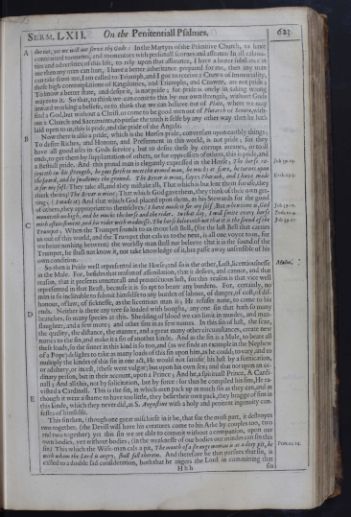 Serm. LXII.
On the Penitentiall Psalmes.
623
doe not, yet we will not serve thy Gods: In the Martyrs of the Primitive Church, to have
Serm. LXII.
On the Penitentiall Psalmes.
623
doe not, yet we will not serve thy Gods: In the Martyrs of the Primitive Church, to have
contemned torments, and tormentors with personall scornes and affronts: In all calami-
ties and adversities of this life, to rely upon that assurance, I have a better substance in
me then any man can hurt, I have a better inheritance prepared for me, then any man
can take from me, I am called to Triumph, and I goe to receive a Crown of Immortality,
these high contemplations of Kingdomes, and Triumphs, and Crowns, are not pride;
To know a better state, and desire it, is not pride; for pride is onely in taking wrong
wayes to it. So that, to think we can come to this by our own strength, without Gods
inward working a beliefe, or to think that we can believe out of Plato, where we may
find a God, but without a Christ, or come to be good men out of Plutarch or Seneca, with-
out a Church and Sacraments, to pursue the truth it selfe by any other way then he hath
laid open to us, this is pride, and the pride of the Angels.
Now there is also a pride, which is the Horses pride, conversant upon earthly things;
To desire Riches, and Honour, and Preferment in this world, is not pride; for they
have all good uses in Gods service; but to desire these by corrupt meanes, or to ill
ends, to get them by supplantation of others, or for oppression of others, this is pride, and
a Bestiall pride. And this proud man is elegantly expressed in the Horse;Job 39.19. The horse re-
joyceth in his strength, he goes forth to meet the armed man, he mocks at feare, he turnes upon
the sword, and he swallowes the ground. The River is mine, sayes Pharaoh, Ezek. 29.3. and I have made
it for my seflself: They take all, and they mistake all; That which is but lent them for use, they
think theirs; (The River is mine) That which God gave them, they think of their own get-
ting; (I made it) And that which God placed upon them, as his Stewards for the good
of others, they appropriate to themselves; (I have made it for my self) But when time is,Job 39.21.
Zech. 12.4.
Job 39.27. God
mounteth on high, and he mocks the horse and the rider. In that day, I will smite every horse
with astonishment, and his rider with madnesse. The horse beleeveth not that it is the sound of the
Trumpet; When the Trumpet sounds to us in our last Bell, (for the last Bell that carries
us out of this world, and the Trumpet that cals us to the next, is all one voyce to us, for
we heare nothing between) the worldly man shall not beleeve that it is the sound of the
Trumpet, he shall not know it, not take knowledge of it, but passe away unsensible of his
own condition.
So then is Pride well represented in the Horse; and so is the other, Lust, Mulus. licentiousnesse
in the Mule. For, besides that reason of assimilation, that it desires, and cannot, and that
reason, that it presents unnaturall and promiscuous lust, for this reason is that vice well
represented in that Beast, because it is so apt to beare any burdens. For, certainly, no
man is so inclinable to submit himselfe to any burden of labour, of danger, of cost, of dis-
honour, of law, of sicknesse, as the licentious man is; He refuses none, to come to his
ends. Neither is there any tree so loaded with boughs, any one sin that hath so many
branches, so many species as this. Shedding of blood we can limit in murder, and man-
slaughter, and a few more; and other sins in as few names. In this sin of lust, the sexe,
the quality, the distance, the manner, and a great many other circumstances, create new
names to the sin, and make it a sin of another kinde. And as the sin is a Mule, to beare all
these loads, so the sinner in this kind is so too, and (as we finde an example in the Nephew
of a Pope) delights to take as many loads of this sin upon him, as he could; to vary, and to
multiply the kindes of this sin in one act, He would not satisfie his lust by a fornication,
or adultery, or incest, (these were vulgar) but upon his own sex; and that not upon an or-
dinary person, but in their account, upon a Prince; And he, a spirituall Prince, A Cardi-
nall; And all this, not by solicitation, but by force: for thus he compiled his sins, He ra-
vished a Cardinall. This is the sin, in which men pack up as much sin as they can, and as
though it were a shame to have too little, they belie their own pack, they bragge of sins in
this kinde, which they never did, as S. Augustine with a holy and penitent ingenuity con-
fesses of himselfe.
This sin then, (though one great mischiefe in it be, that for the most part, it destroyes
two together, (the Devill will have his creatures come to his Arke by couples too, two
and two together) yet this sin we are able to commit without a companion, upon our
own bodies, yea without bodies; (in the weaknesse of our bodies our mindes can sin this
sin) This which the Wise-man cals a pit, The mouth of a strange woman is as a deep pit, Prov. 22.14. he
with whom the Lord is angry, shall fall therein. And therefore he that pursues that sin, is
called to a double sad consideration, both that he angers the Lord in committing that Hhh sinsinne
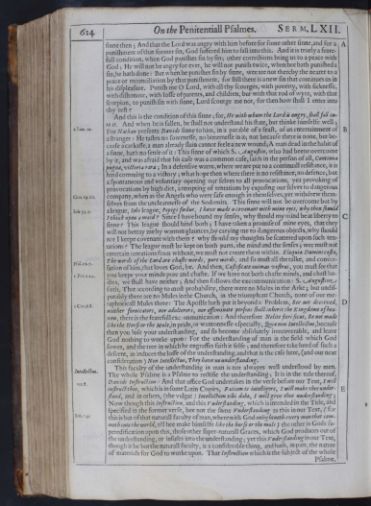 624
On the Penitentiall Psalmes.
Serm. LXII.
sinne then; And that the Lord was angry with him before for some other sinne, and for a
624
On the Penitentiall Psalmes.
Serm. LXII.
sinne then; And that the Lord was angry with him before for some other sinne, and for a
punishment of that former sin, God suffered him to fall into this. And it is truely a feare-
full condition, when God punishes sin by sin; other corrections bring us to a peace with
God; He will not be angry for ever, he will not punish twice, when hee hath punished a
sin, he hath done: But when he punishes sin by sinne, wee are not thereby the nearer to a
peace or reconciliation by that punishment, for still there is a new sin that continues us in
his displeasure. Punish me O Lord, with all thy scourges, with poverty, with sicknesse,
with dishonour, with losse of parents, and children, but with that rod of wyre, with that
scorpion, to punish sin with sinne, Lord scourge me not, for then how shall I enter into
thy rest?
And this is the condition of this sinne; for, He with whom the Lord is angry, shall fall in-
to it. And when he is fallen, he shall not understand his state, but thinke himselfe well;
For Nathan presents Davids sinne to him, in a parable of a feast, of an entertainment of 2 Sam. 12.
a stranger: He tastes no sowrnesse, no bitternesse in it; not because there is none, but be-
cause a carkasse, a man already slain cannot feele a new wound; A man dead in the habit of
a sinne, hath no sense of it: This sinne of which S. Augustin, who had beene overcome
by it, and was afraid that his case was a common case, saith in the person of all, Continua
pugna, victoria rara; In a defensive warre, where we are put to a continuall resistance, it is
hard comming to a victory; what hope then where there is no resistance, no defence, but
a spontaneous and voluntary opening our selves to all provocations, yea provoking of
provocations by high diet, a tempting of tentations by exposing our selves to dangerous
company, Gen. 19.10. when as the Angels who were safe enough in themselves, yet withdrew them-
selves from the uncleannesse of the Sodomits. This sinne will not be overcome but by
a league, Iob 31.1. Iobs league, Pepigi fœdus, I have made a covenant with mine eyes, why then should
I think upon a maid? Since I have bound my senses, why should my mind be at liberty to
sinne? This league should bind both; I have taken a promise of mine eyes, that they
will not betray me by wanton glaunces, by carying me to dangerous objects, why should
not I keepe covenant with them? why should my thoughts be scattered upon such ten-
tations? The league must be kept on both parts, the mind and the senses; wee must not
entertain tentations from without, we must not create them within. Eloquia Domini casta,
The words of the Lord are chaste words, Psal. 12.7. pure words, and so must all the talke, and conver-
sation of him, that loves God, be. And then, Castificate animas vestras, you must see that
you keepe your minds pure and chaste.1 Pet. 1.22. If we have not both chaste minds, and chast bo-
dies, we shall have neither; And then follows the excommunication: S. Augustine
saith, That according to most probability, there were no Mules in the Arke; but undis-
putably there are no Mules in the Church, in the triumphant Church, none of our me-
taphoricall Mules there:1 Cor. 6.8. The Apostle hath put it beyond a Problem, Bee not deceived,
neither fornicators, nor adulterers, nor effeminate persons shall inherit the Kingdome of hea-
ven, there is the fearefull excommunication: And therefore Nolite fieri sicut, Be not made
like the Horse or the Mule, in pride, or wantonnesse especially, Quia non Intellectus, because
then you lose your understanding, and so become absolutely irrecoverable, and leave
God nothing to worke upon: For the understanding of man is the field which God
sowes, and the tree in which he engraffes faith it selfe; and therefore take heed of such a
descent, as induces the losse of the understanding, and that is the case here, (and our next
consideration) Non Intellectus, They have no understanding.
This faculty of the understanding in man is not alwayes well understood by men.Intellectus.
The whole Psalme is a Psalme to rectifie the understanding; It is in the title thereof,
Davids Instruction:ver. 8. And that office God undertakes in the verse before our Text, I will
instruct thee, which is in some Latin Copies, Faciam te intelligere, I will make thee under-
stand, and in others, (the vulgat) Intellectum tibi dabo, I will give thee understanding;
Now though this Instruction, and this Vnderstanding, which is intended in the Title, and
specified in the former verse, bee not the same Vnderstanding as this in our Text, (for
this is but of that naturall faculty of man, Ioh. 1.9. wherewith God enlightneth every man that com-
meth into the world, till hee make himselfe like the horse or the mule) the other is God su-
peredification upon this, those other super-naturall Graces, which God produces out of
the understanding, or infuses into the understanding; yet this Vnderstanding in our Text,
though it be but the naturall faculty, is a considerable thing, and hath, in part, the nature
of materials for God to worke upon. That Instruction which is the subject of the whole Psalme,
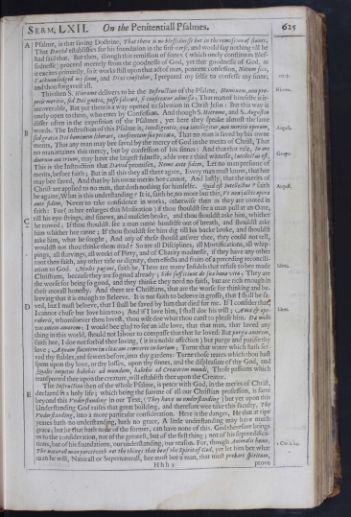 Serm. LXII.
On the Penitentiall Psalmes.
625
Psalme, is that saving Doctrine, That there is no blessednesse but in the remission of sinnes.
Serm. LXII.
On the Penitentiall Psalmes.
625
Psalme, is that saving Doctrine, That there is no blessednesse but in the remission of sinnes.
That David establishes for his foundation in the first verse, and would say nothing till he
had said that. But then, though this remission of sinnes (which onely constitutes Bles-
sednesse) proceed meerely from the goodnesse of God, yet that goodnesse of God, as
it excites primarily, so it works still upon that act of man, penitent confession, Notum feci,
I acknowledged my sinne, and Dixi confitebor, I prepared my selfe to confesse my sinne, ver. 5.
and thou forgavest all.
This then S. Hierome delivers to be the Instruction of the Psalme, Hominem, Hieron. non pro-
priis meritis, sed Dei gratia, posse salvari, si confiteatur admissa; That man of himselfe is ir-
recoverable, But yet there is a way opened to salvation in Christ Jesus: But this way is
onely open to them, who enter by Confession. And though S. Hierome, and S. Augustin
differ often in the exposition of the Psalmes, yet here they speake almost the same
words. The Instruction of this Psalme is, Intelligentia, qua intelligitur, non meritis operum, August.
sed gratia Dei hominem liberari, confitentem sua peccata, That no man is saved by his owne
merits, That any man may bee saved by the mercy of God in the merits of Christ, That
no man attaines this mercy, but by confession of his sinnes: And that that rule, In ore
duorum aut trium, may have the largest fulnesse, adde wee a third witnesse, Intellectus est, Gregor.
This is the Instruction that David promises, Nemo ante fidem, Let no man presume of
merits, before faith; But in all this they all three agree, Every man must know, that hee
may bee saved, And that by his owne merits hee cannot, And lastly, that the merits of
Christ are applied to no man, that doth nothing for himselfe. Quid est Intellectus?August. saith
he againe, What is this understanding? It is, saith he, no more but this, Vt non jactes opera
ante fidem, Never to take confidence in works, otherwise then as they are rooted in
faith: For (as hee enlarges this Meditation) if thou shouldst see a man pull at an Oare,
till his eye-strings, and sinews, and muscles broke, and thou shouldst aske him, whither
he rowed; If thou shouldst see a man runne himselfe out of breath, and shouldst aske
him whither hee ranne; If thou shouldst see him dig till his backe broke, and shouldst
aske him, what he sought, And any of these should answer thee, they could not tell,
wouldst not thou thinke them mad? So are all Disciplines, all Mortifications, all whip-
pings, all starvings, all works of Piety, and of Charity madnesse, if they have any other
root then faith, any other title or dignity, then effects and fruits of a preceding reconcili-
ation to God. Multi pagani, saith he, Idem. There are many Infidels that refuse to bee made
Christians, because they are so good already; Sibi sufficiunt de sua bona vita; They are
the worse for being so good, and they thinke they need no faith, but are rich enough in
their morall honesty. And there are Christians, that are the worse for thinking and be-
leeving that it is enough to Beleeve. It is not faith to beleeve in grosse, that I shall be sa-
ved, but I must beleeve, that I shall be saved by him that died for me. If I consider that,
I cannot chuse but love him too; And if I love him, I shall doe his will; Ama & Idem. ope-
raberis, whomsoever thou lovest, thou wilt doe what thou canst to please him. Da mihi
vacantem amorem; I would bee glad to see an idle love, that that man, that loved any
thing in this world, should not labour to compasse that that he loved: But purga amorem,
saith hee, I doe not forbid thee loving, (it is a noble affection) but purge and purifie thy
love; Aquam fluentem in cloacam converte in hortum; Turne that water which hath ser-
ved thy stables, and sewers before, into thy gardens: Turne those teares which thou hast
spent upon thy love, or thy losses, upon thy sinnes, and the displeasure of thy God, and
Quales impetus habebas ad mundum, habebis ad Creatorem mundi, Those passions which
transported thee upon the creature, will establish thee upon the Creator.
The Instruction then of the whole Psalme, is peace with God, in the merits of Christ,
declared in a holy life; which being the summe of all our Christian profession, is farre
beyond this Vnderstanding in our Text, (They have no understanding) but yet upon this
Understanding God raises that great building, and therefore wee take this faculty, The
Vnderstanding, into a more particular consideration. Here is the danger, He that at ripe
yeares hath no understanding, hath no grace, A little understanding may have much
grace; but he that hath none of the former, can have none of this. God therefore brings
us to the consideration, not of the greatest, but of the first thing; not of his superedifica-
tions, but of his foundations, our understanding, our reason. For, though Animalis homo, 1 Cor. 2.14.
The naturall man perceiveth not the things that be of the Spirit of God, yet let him bee what
man he will, Naturall or Supernaturall, hee must bee a man, that must probare spiritum, Hhh2 prove
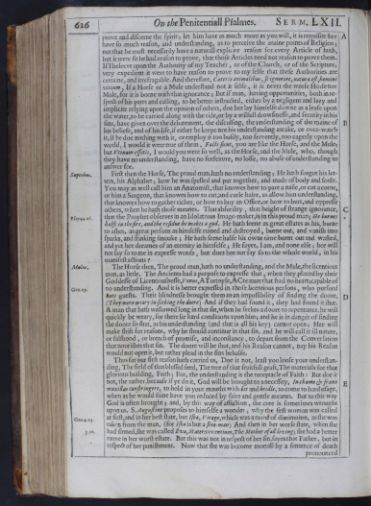 626
On the Penitentiall Psalmes.
Serm. LXII.
prove and discerne the spirit; let him have as much more as you will, it is requisite hee
626
On the Penitentiall Psalmes.
Serm. LXII.
prove and discerne the spirit; let him have as much more as you will, it is requisite hee
have so much reason, and understanding, as to perceive the maine points of Religion;
not that he must necessarily have a naturall explicite reason for every Article of faith,
but it were fit he had reason to prove, that those Articles need not reason to prove them.
If I beleeve upon the Authority of my Teacher, or of the Church, or of the Scripture,
very expedient it were to have reason to prove to my selfe that these Authorities are
certaine, and irrefragable. And therefore, Cæteris animalibus, se ignorare, natura est, homini
vitium, If a Horse or a Mule understand not it selfe, it is never the worse Horse nor
Mule, for it is borne with that ignorance; But if man, having opportunities, both in re-
spect of his parts and calling, to be better instructed, either by a negligent and lazy and
implicite relying upon the opinion of others, doe but lay himselfe downe as a leafe upon
the water, to be carried along with the tide, or by a wilfull drowsinesse, and security in his
sins, have given over the debatement, the discussing, the understanding of the maine of
his beliefe, and of his life, if either he keepe not his understanding awake, or over-watch
it, if he doe nothing with it, or employ it too busily, too fervently, too eagerly upon the
world, I would it were true of them, Facti sicut, you are like the Horse, and the Mule;
but Vtinam essetis, I would you were so well, as the Horse, and the Mule, who, though
they have no understanding, have no forfeiture, no losse, no abuse of understanding to
answer for.
First then the Horse, Superbus. The proud man, hath no understanding; He hath forgot his let-
ters, his Alphabet; how he was spelled and put together, and made of body and soule.
You may as well call him an Anatomist, that knowes how to pare a naile, or cut a corne,
or him a Surgeon, that knowes how to cut, and curle haire, as allow him understanding,
that knowes how to gather riches, or how to buy an Office, or how to hurt, and oppresse
others, when he hath those meanes. That absurdity, that height of strange ignorance,
that the Prophet observes in an Idolatrous Image-maker, Esay 44.16. is in this proud man; He burnes
halfe in the fire, and the residue he makes a god. He hath seene as great estates as his, burne
to ashes, as great persons as himselfe ruined and destroyed, burne out, and vanish into
sparks, and stinking smoake; He hath seene halfe his owne time burnt out and wasted,
and yet hee dreames of an eternity in himselfe; He sayes, I am, and none else; hee will
not say so to me in expresse words, but does hee not say so to the whole world, in his
manifest actions?
The Horse then, Mulus. The proud man, hath no understanding, and the Mule, the licentious
man, as little. The Ancients had a purpose to expresse that, when they placed by their
Goddesse of Licentiousnesse, Venus, A Tortoyse, A Creature that had no heart; capable of
no understanding.Gen. 19. And it is better expressed in those licentious persons, who pursued
Lots guests. Their blindnesse brought them to an impossibility of finding the doore,
(They were weary in seeking the doore) And if they had found it, they had found it shut.
A man that hath wallowed long in that sin, when he seekes a doore to repentance, he will
quickly be weary, for there lie hard conditions upon him; and he is in danger of finding
the doore so shut, as his understanding (and that is all his key) cannot open; Hee will
make shift for reasons, why he should continue in that sin, and he will call it ill nature,
or falshood, or breach of promise, and inconstancy, to depart from the Conversation
that nourishes that sin. The doore will be shut, and his Reason cannot, nay his Reason
would not open it, but rather plead in the sins behalfe.
Thus far our first reason hath carried us, Doe it not, least you loose your understan-
ding, The field of that blessed seed, The tree of that fruitfull graft, The materials for that
glorious building, Faith; For, the understanding is the receptacle of Faith: But doe it
not, the rather, because if ye do it, God will be brought to a necessity, In chamo & fræno
maxillas constringere, to hold in your mouths with bit and bridle, to come to hard usage,
when as he would faine have you reduced by faire and gentle meanes. But to this way
God is often brought; and, by this way of affliction, the cure is sometimes wrought
upon us. S. Augustine proposes to himselfe a wonder, why the first woman was called
at first, Gen. 2.23. and in her best state, but Isha, Virago, which was a name of diminution, as she was
taken from the man, (for Isha is but a shee-man) And then in her worse state, when she
had sinned, 3.20. she was called Eva, Mater viventium, The Mother of all living; she had a better
name in her worst estate. But this was not in respect of her sin, sayes that Father, but in
respect of her punishment. Now that she was become mortall by a sentence of death pronounced
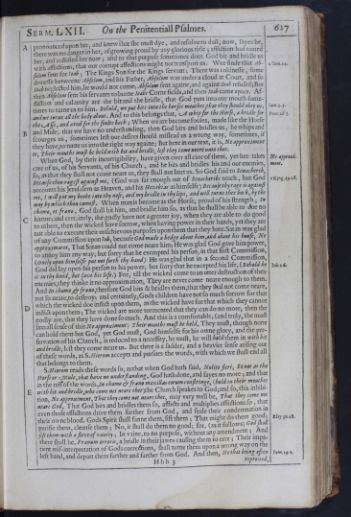 Serm. LXII.
On the Penitentiall Psalmes.
617
pronounced upon her, and knew that she must dye, and resolve to dust, now, sayes he,
Serm. LXII.
On the Penitentiall Psalmes.
617
pronounced upon her, and knew that she must dye, and resolve to dust, now, sayes he,
there was no danger in her, of growing proud by any glorious title; affliction had tamed
her, and rectified her now; and to that purpose sometimes does God bit and bridle us
with afflictions, that our corrupt affections might not transport us.2 Sam. 14. Wee finde that Ab-
solom sent for Ioab; The Kings Son for the Kings servant; There was coldnesse, some
drinesse betweene Absolom, and his Father, Absolom was under a cloud at Court, and so
Ioab neglected him, he would not come; Absolom sent againe, and againe Ioab refused; But
then Absolom sent his servants to burne Ioabs Corne fields, and then Ioab came apace. Af-
fliction and calamity are the bit and the bridle, that God puts into our mouth some-
times to turne us to him. Behold, we put bits into the horses mouthes, that they should obey us, Iam. 3.3.
and we turne all the body about. And to this belongs that, Prov. 26 . 3. A whip for the Horse, a bridle for
the Asse, and a rod for the fooles back; When we are become fooles, made like the Horse
and Mule, that we have no understanding, then God bits and bridles us, he whips and
scourges us, sometimes lest our desires should mislead us a wrong way, sometimes, if
they have, to turne us into the right way againe; But here in our text, it is, Ne approximent
te, Their mouths must be held with bit and bridle, lest they come neere unto thee.
When God, by their incorrigibility, have given over all care of them, Ne approxi-
ment. yet hee takes
care of us, of his Servants, of his Church, and he bits and bridles his and our enemies,
so, as that they shall not come neare us, they shall not hurt us. So God said to Senacherib,
Because thou ragest against me, (God was far enough out of Senacheribs reach, 2 King. 19.28. but God
accounts his Jerusalem as Heaven, and his Hezekias as himselfe) Because thy rage is against
me, I will put my hooke into thy nose, and my bridle in thy lips, and will turne thee back, by the
way by which thou camest. When man is become as the Horse, proud of his strength, In
chamo, et fræno, God shall bit him, and bridle him so, as that he shall be able to doe no
harme; and certainely, the godly have not a greater joy, when they are able to do good
to others, then the wicked have sorrow, when having power in their hands, yet they are
not able to execute their mischievous purposes upon them that they hate. Satan was glad
of any Commission upon Iob, because God made a hedge about him, and about his house, Ne
approximaret, That Satan could not come neare him; He was glad God gave him power,
to annoy him any way; but sorry that he exempted his person, in that first Commission,
(Onely upon himselfe put not forth thy hand) He was glad that in a second Commission,
God did lay open his person to his power, but sorry that he excepted his life, Iob 2.6. (Behold he
is in thy hand, but save his life.) For, till the wicked come to an utter destruction of their
enemies, they thinke it no approximation, They are never come neare enough to them.
And In chamo, & fræno, therfore God bits & bridles them, that they shal not come neare,
not so neare, to destroy; and certainely, Gods children have not so much sorrow for that
which the wicked doe inflict upon them, as the wicked have for that which they cannot
inflict upon them; The wicked are more tormented that they can do no more, then the
godly are, that they have done so much. And this is a comfortable, (and truly, the most
literall sense of this Ne approximent) Their mouths must be held, They must, though none
can hold them but God, yet God must, God himselfe for his owne glory, and the pre-
servation of his Church, is reduced to a necessity, he must, he will hold them in with bit
and bridle, lest they come neare us. But there is a sadder, and a heavier sense arising out
of these words, as S. Hierom accepts and pursues the words, with which we shall end all
that belongs to them.
S. Hierom reads these words so, as that when God hath said, Nolite fieri, Be not as the
Horse or Mule, that have no understanding, God hath done, and sayes no more; and that
in the rest of the words, In chamo & fræno maxillas eorum constringe, (hold in their mouthes
with bit and bridle, who come not neare thee) the Church speakes to God; and so, this inhibi-
tion, Ne approximent, That they come not neare thee, may very well be, That they come not
neare God, That God bits and bridles them so, afflicts and multiplies afflictions so, that
even those afflictions drive them farther from God, and seale their condemnation in
their owne blood. Gods Spirit shall fanne them, sift them; That might do them good; Esay 30.28.
purifie them, cleanse them; No, it shall do them no good; for, (as it follows) God shall
sift them with a sieve of vanity; In vaine, to no purpose, without any amendment; And
there shall be, Frænum erroris, a bridle in their jawes causing them to erre; Their impa-
tient mis-interpretation of Gods corrections, shall turne them upon a wrong way on the
left hand, and depart them farther and farther from God. And then, Prov. 29.1. He that being often Hhh3 reproved,
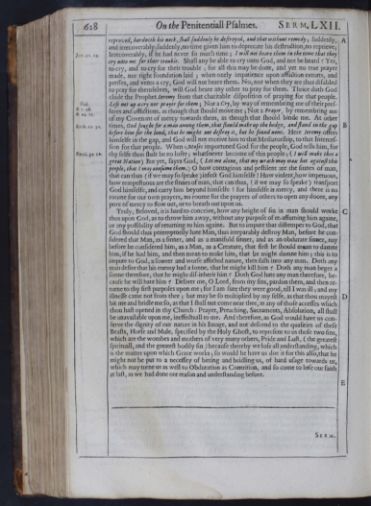 628
On the Penitentiall Psalmes.
Serm. LXII.
reproved, hardneth his neck, shall suddenly be destroyed, and that without remedy; suddenly,
628
On the Penitentiall Psalmes.
Serm. LXII.
reproved, hardneth his neck, shall suddenly be destroyed, and that without remedy; suddenly,
and irrecoverably; suddenly, no time given him to deprecate his destruction, no reprieve;
Irrecoverably, Jere. 11.14. if he had never so much time; I will not heare them in the time that they
cry unto me for their trouble. Shall any be able to cry unto God, and not be heard? Yes,
to cry, and to cry for their trouble; for all this may be done, and yet no true prayer
made, nor right foundation laid; when onely impatience upon affliction extorts, and
presses, and vents a cry, God will not heare them. No, nor when they are thus disabled
to pray for themselves, will God heare any other to pray for them. Thrice doth God
chide the Prophet Ieremy from that charitable disposition of praying for that people.
Lift not up a cry nor prayer for them; Not a Cry, by way of remembring me of their Ibid. pres-
sures and afflictions, as though that should move me; Not a Prayer, by remembring me& 7.16. &
14.11.
of my Covenant of mercy towards them, as though that should binde me. At other
times, Ezek. 22.30. God sought for a man among them, that should make up the hedge, and stand in the gap
before him for the land, that he might not destroy it, but he found none. Here Ieremy offers
himselfe in the gap, and God will not receive him to that Mediatorship, to that Interces-
sion for that people. When Moses importuned God for the people, God tells him, for
thy selfe thou shalt be no loser;Exod. 32.10. whatsoever become of this people; (I will make thee a
great Nation) But yet, sayes God, (Let me alone, that my wrath may wax hot against this
people, that I may consume them.) O how contagious and pestilent are the sinnes of man,
that can thus (if we may so speake) infect God himselfe! How violent, how impetuous,
how tempestuous are the sinnes of man, that can thus, (if we may so speake) transport
God himselfe, and carry him beyond himselfe! for himselfe is mercy, and there is no
roome for our own prayers, no roome for the prayers of others to open any doore, any
pore of mercy to flow out, or to breath out upon us.
Truly, Beloved, it is hard to conceive, how any height of sin in man should worke
thus upon God, as to throw him away, without any purpose of re-assuming him againe,
or any possibility of returning to him againe. But to impute that distemper to God, that
God should thus peremptorily hate Man, thus irreparably destroy Man, before he con-
sidered that Man, as a sinner, and as a manifold sinner, and as an obdurate sinner, nay
before he considered him, as a Man, as a Creature, that first he should mean to damne
him, if he had him, and then mean to make him, that he might damne him; this is to
impute to God, a sowrer and worse affected nature, then falls into any man. Doth any
man desire that his enemy had a sonne, that he might kill him? Doth any man beget a
sonne therefore, that he might dis-inherit him? Doth God hate any man therefore, be-
cause he will hate him? Deliver me, O Lord, from my sins, pardon them, and then re-
turne to thy first purposes upon me; for I am sure they were good, till I was ill; and my
illnesse came not from thee; but may be so multiplied by my selfe, as that thou mayest
bit me and bridle me so, as that I shall not come near thee, in any of those accesses which
thou hast opened in thy Church: Prayer, Preaching, Sacraments, Absolution, all shall
be unavailable upon me, ineffectuall to me. And therefore, as God would have us con-
serve the dignity of our nature in his Image, and not descend to the qualities of these
Beasts, Horse and Mule, specified by the Holy Ghost, to represent to us those two sins,
which are the wombes and mothers of very many others, Pride and Lust, (the greatest
spirituall, and the greatest bodily sin) because thereby we lose all understanding, which
is the matter upon which Grace works; so would he have us doe it for this also, that he
might not be put to a necessity of bitting and bridling us, of hard usage towards us,
which may turne us as well to Obduration as Contrition, and so come to lose our faith
at last, as we had done our reason and understanding before. Serm.
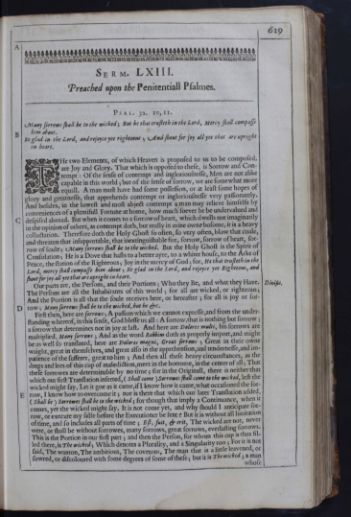 629
629
Serm. LXIII.
Preached upon the Penitentiall Psalmes.
Psal. 32. 10, 11.
Many sorrows shall be to the wicked; But he that trusteth in the Lord, Mercy shall compasse
him about.
Be glad in the Lord, and rejoyce yee righteous; And shout for joy all yee that are upright
in heart.
THeThe two Elements, of which Heaven is proposed to us to be composed,
are Joy and Glory. That which is opposed to these, is Sorrow and Con-
tempt: Of the sense of contempt and ingloriousnesse, Men are not alike
capable in this world; but of the sense of sorrow, we are somewhat more
equall. A man must have had some possession, or at least some hopes of
glory and greatnesse, that apprehends contempt or ingloriousnesse very passionately.
And besides, in the lowest and most abject contempt a man may relieve himselfe by
conveniences of a plentifull Fortune at home, how much soever he be undervalued and
despised abroad. But when it comes to a sorrow of heart, which dwells not imaginarily
in the opinion of others, as contempt doth, but really in mine owne bosome, it is a heavy
colluctation. Therefore doth the Holy Ghost so often, so very often, blow that coale,
and threaten that insupportable, that inextinguishable fire, sorrow, sorrow of heart, sor-
row of soule; Many sorrows shall be to the wicked. But the Holy Ghost is the Spirit of
Consolation; He is a Dove that hasts to a better ayre, to a whiter house, to the Arke of
Peace, the station of the Righteous; Joy in the mercy of God; for, He that trusteth in the
Lord, mercy shall compasse him about; Be glad in the Lord, and rejoyce yee Righteous, and
shout for joy all yee that are upright in heart.
Our parts are, the Persons, and their Portions; Who they Be, and what they Have. Divisio.
The Persons are all the Inhabitants of this world; for all are wicked, or righteous;
And the Portion is all that the soule receives here, or hereafter; for all is joy or sor-
row; Many sorrows shall be to the wicked, but he &c.
First then, here are sorrows; A passion which we cannot expresse, and from the under-
standing whereof, in this sense, God blesse us all: A sorrow, that is nothing but sorrow;
a sorrow that determines not in joy at last. And here are Dolores multi, his sorrows are
multiplied, Many sorrows; And as the word Rabbim doth as properly import, and might
be as well so translated, here are Dolores magni, Great sorrows; Great in their owne
waight, great in themselves, and great also in the apprehension, and tendernesse, and im-
patience of the sufferer, great to him; And then all these heavy circumstances, as the
dregs and lees of this cup of malediction, meet in the bottome, in the center of all; That
these sorrowes are determinable by no time; for in the Originall, there is neither that
which our first Translation inserted, (Shall come) Sorrowes shall come to the wicked, lest the
wicked might say, Let it goe as it came, if I know how it came, what occasioned the sor-
row, I know how to overcome it; nor is there that which our later Translation added,
(Shall be) Sorrowes shall be to the wicked; for though that imply a Continuance, when it
comes, yet the wicked might say, It is not come yet, and why should I anticipate sor-
row, or execute my selfe before the Executioner be sent? But it is without all limitation
of time, and so includes all parts of time; Est, fuit, & erit, The wicked are not, never
were, or shall be without sorrowes, many sorrows, great sorrows, everlasting sorrows.
This is the Portion in our first part; and then the Person, for whom this cup is thus fil-
led there, is The wicked; Which denotes a Plurality, and a Singularity too; For it is not
said, The wanton, The ambitious, The covetous, The man that is a little leavened, or
sowred, or discoloured with some degrees of some of these; but it is The wicked; a man whose
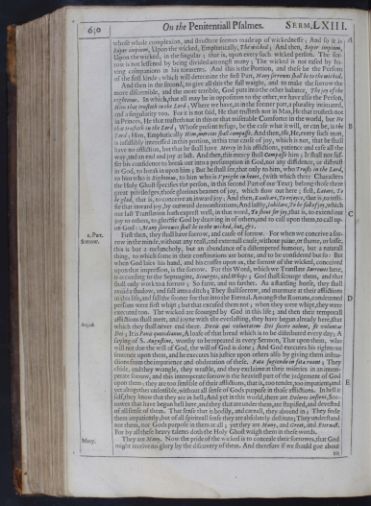 630
On the Penitentiall Psalmes.
Serm. LXIII.
whose whole complexion, and structure seemes made up of wickednesse; And so it is
630
On the Penitentiall Psalmes.
Serm. LXIII.
whose whole complexion, and structure seemes made up of wickednesse; And so it is
Super impium, Upon the wicked, Emphatically, The wicked; And then, Super impium,
Upon the wicked, in the singular; that is, upon every such wicked person. The sor-
row is not lessened by being divided amongst many; The wicked is not eased by ha-
ving companions in his torments. And this is the Portion, and these be the Persons
of the first kinde; which will determine the first Part, Many sorrowes shall be to the wicked.
And then in the second, to give all this the full waight, and to make the sorrow the
more discernible, and the more terrible, God puts into the other balance, The joy of the
righteous. In which, that all may be in opposition to the other, we have also the Person,
Him that trusteth in the Lord; Where we have, as in the former part, a plurality intimated,
and a singularity too. For it is not said, He that trusteth not in Man, He that trusteth not
in Princes, He that trusteth not in this or that miserable Comforter in the world, but He
that trusteth in the Lord; Whose present refuge, be the case what it will, or can be, is the
Lord; Him, Emphatically Him, mercies shall compasse. And then, Ille, He, every such man,
is infallibly interessed in this portion, in this true cause of joy, which is not, that he shall
have no affliction, but that he shall have Mercy in his afflictions, patience and ease all the
way, and an end and joy at last. And then, this mercy shall Compasse him; It shall not suf-
fer his confidence to break out into a presumption in God, nor any diffidence, or distrust
in God, to break in upon him; But he shall see, that only to him, who Trusts in the Lord,
to him who is Righteous, to him who is Vpright in heart, (with which three Characters
the Holy Ghost specifies the person, in this second Part of our Text) belong those three
great priviledges, those glorious beames of joy, which flow out here; first, Lætari, To
be glad, that is, to conceive an inward joy; And then, Exultari, To rejoyce, that is, to testi-
fie that inward joy, by outward demonstrations; And lastly, Iubilare, To be full of joy, which
our last Translation hath exprest well, in that word, To shout for joy, that is, to extend our
joy to others, to glorifie God by drawing in of others, and to call upon them, to call up-
on God: Many sorrowes shall be to the wicked, but, &c.
First then, 1. Part.
Sorrow. they shall have sorrow, and cause of sorrow. For when we conceive a sor-
row in the minde, without any reall, and externall cause, without paine, or shame, or losse,
this is but a melancholy, but an abundance of a distempered humour, but a naturall
thing, to which some in their constitutions are borne, and to be considered but so: But
when God laies his hand, and his crosses upon us, the sorrow of the wicked, conceived
upon that impression, is the sorrow. For this Word, which we Translate Sorrowes here,
is according to the Septuagint, Scourges, and Whips; God shall scourge them, and that
shall only work to a sorrow; So farre, and no farther. As a startling horse, they shall
avoid a shadow, and fall into a ditch; They shall sorrow, and murmure at their afflictions
in this life, and fall the sooner for that into the Eternal. Amongst the Romans, condemned
persons were first whipt; but that excused them not; when they were whipt, they were
executed too. The wicked are scourged by God in this life; and then their temporall
afflictions shall meet, August. and joyne with the everlasting, they have begun already here, that
which they shall never end there. Deeis qui voluntatem Dei facere nolunt, fit voluntas
Dei; It is Panis quotidianus, A loafe of that bread which is to be distributed every day; A
saying of S. Augustine, worthy to be repeated in every Sermon, That upon them, who
will not doe the will of God, the will of God is done; And God executes his righteous
sentence upon them, and he executes his justice upon others also by giving them instru-
ctions from the impatience and obduration of these. Fata fugiendo in fata ruant; They
chide, and they wrangle, they wrastle, and they exclaime at their miseries in an intem-
perate sorrow, and this intemperate sorrow is the heaviest part of the judgement of God
upon them; they are too sensible of their afflictions, that is, too tender, too impatient; and
yet altogether unsensible, without all sense of Gods purpose in those afflictions. In hell it
self, they know that they are in hell; And yet in this world, there are Dolores inferni, Sor-
rowes that have begun hell here, and they that are under them, are stupified, and devested
of all sense of them. That sense that is bodily, and carnall, they abound in; They feele
them impatiently; but of all spirituall sense they are absolutely destitute; They understand
not them, nor Gods purpose in them at all; yet they are Many, and Great, and Eternall.
For by all these heavy talents doth the Holy Ghost waigh them in these words.
They are Many.Many. Now the pride of the wicked is to conceale their sorrowes, that God
might receive no glory by the discovery of them. And therefore if we should goe about to
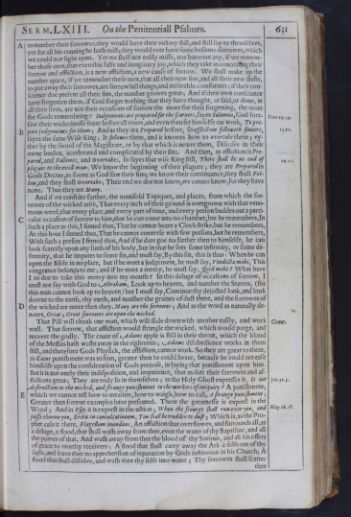 Serm. LXIII.
On the Penitentiall Psalmes.
631
to number their sorrowes, they would have their victory still, and still say to themselves,
Serm. LXIII.
On the Penitentiall Psalmes.
631
to number their sorrowes, they would have their victory still, and still say to themselves,
yet for all his cunning he hath mist; they would ever have some bosome-sorrowes, which
we could not light upon. Yet we shall not easily misse, nor leave out any, if we remem-
ber those men, that even this false and imaginary joy, which they take in concealing their
forrow and affliction, is a new affliction, a new cause of sorrow. We shall make up the
number apace, if we remember these men, that all their new sins, and all their new shifts,
to put away their sorrowes, are sorrowfull things, and miserable comforters; if their con-
science doe present all their sins, the number growes great; And if their own conscience
have forgotten them, if God forget nothing that they have thought, or said, or done, in
all their lives, are not their occasions of sorrow the more for their forgetting, the more
for Gods remembring? Iudgements are prepared for the scorners, sayes Solomon, Prov. 19.29. God fore-
saw their wickednesse from before all times, and even then set himselfe on work, To pre-
pare judgements for them; And as they are Prepared before, so affliction followeth sinners,
13.21. sayes the same Wise King; It followes them, and it knowes how to overtake them; ey-
ther by the sword of the Magistrate, or by that which is nearer them, Diseases in their
owne bodies, accelerated and complicated by their sins. And then, as affliction is Pre-
pared, and Followes, and Overtakes, so sayes that wise King still, There shall be no end of
plagues to the evill man; We know the beginning of their plagues; 24.20. they are Prepared in
Gods Decree, as soone as God saw their sins; we know their continuance, they shall Fol-
low, and they shall Overtake; Their end we doe not know, we cannot know, for they have
none. Thus they are Many.
And if we consider farther, the manifold Topiques, and places, from which the sor-
rowes of the wicked arise, That every inch of their ground is overgrown with that veno-
mous weed, that every place, and every part of time, and every person buddes out a parti-
cular occasion of sorrow to him, that he can come into no chamber, but he remembers, In
such a place as this, I sinned thus, That he cannot heare a Clock strike, but he remembers,
At this hour I sinned thus, That he cannot converse with few persons, but he remembers,
With such a person I sinned thus, And if he dare goe no farther then to himselfe, he can
look scarcely upon any limb of his body, but in that he sees some infirmity, or some de-
formity, that he imputes to some sin, and must say, By this sin, this is thus: When he can
open the Bible in no place, but if he meet a judgement, he must say, Vindicta mihi, This
vengeance belongs to me; and if he meet a mercy, he must say, Quid mihi? What have
I to doe to take this mercy into my mouth? In this deluge of occasions of sorrow, I
must not say with God to Abraham, Look up to heaven, and number the Starres, (for
this man cannot look up to heaven) but I must say, Continue thy dejected look, and look
downe to the earth, thy earth, and number the graines of dust there, and the sorrowes of
the wicked are more then they. Many are the sorrowes; And as the word as naturally de-
notes, Great; Great sorrowes are upon the wicked.
That Pill will choak one man, which will slide down with another easily, Great. and work
well. That sorrow, that affliction would strangle the wicked, which would purge, and
recover the godly. The coare of Adams apple is still in their throat, which the blood
of the Messias hath washt away in the righteous; Adams disobedience works in them
still, and therefore Gods Physick, the affliction, cannot work. So they are great to them,
as Cains punishment was to him, greater then he could beare, because he could not ease
himselfe upon the consideration of Gods purpose, in laying that punishment upon him.
But it is not onely their indisposition, and impatience, that makes their sorrowes and af-
flictions great; They are truly so in themselves; as the Holy Ghost expresses it, Job 31.3. Is not
destruction to the wicked, and strange punishment to the workers of iniquity? A punishment,
which we cannot tell how to measure, how to waigh, how to call, A strange punishment;
Greater then former examples have presented. There the greatnesse is exprest in the
Word; And in Esay it is exprest in the action; When the scourge shall run over you, Esay 28.18. and
passe thorow you, Eritis in conculcationem, You shall be trodden to dust; Which is, as the Pro-
phet cals it there, Flagellum inundans, An affliction that overflowes, and surrounds all, as
a deluge, a flood, that shall wash away from thee, even the water of thy Baptisme, and all
the power of that, And wash away from thee the blood of thy Saviour, and all his offers
of grace to worthy receivers; A flood that shall carry away the Ark it selfe out of thy
sight, and leave thee no apprehension of reparation by Gods institution in his Church; A
flood that shall dissolve, and wash thee thy selfe into water; Thy sorrowes shall scatter thee
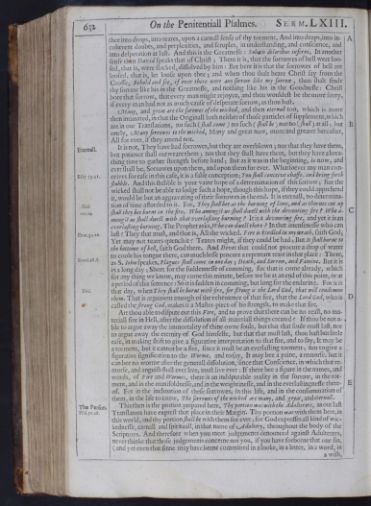 632
On the Penitentiall Psalmes.
Serm. LXIII.
thee into drops, into teares, upon a carnall sense of thy torment, And into drops, into in-
632
On the Penitentiall Psalmes.
Serm. LXIII.
thee into drops, into teares, upon a carnall sense of thy torment, And into drops, into in-coherent doubts, and perplexities, and scruples, in understanding, and conscience, and
into desperation at last. And this is the Greatnesse: Solutis doloribus inferni, In another
sense then David speaks that of Christ; There it is, that the sorrowes of hell were loo-
sed, that is, were slacked, dissolved by him: But here it is that the sorrowes of hell are
loosed, that is, let loose upon thee; and when thou shalt heare Christ say from the
Crosse, Behold and see, if ever there were any sorrow like my sorrow, thou shalt finde
thy sorrow like his in the Greatnesse, and nothing like his in the Goodnesse: Christ
bore that sorrow, that every man might rejoyce, and thou wouldest be the more sorry,
if every man had not as much cause of desperate sorrow, as thou hast.
Many, and great are the sorowes of the wicked, and then eternall too, which is more
then intimated, in that the Originall hath neither of those particles of supplement, which
are in our Translations, no such (shall come) no such (shall be) nor no (shall) at all; but
onely, Many sorrowes to the wicked, Many and great now, more and greater hereafter,
All for ever, if they amend not.
It is not, Eternall. They have had sorrowes, but they are overblown; nor that they have them,
but patience shall outweare them; nor that they shall have them, but they have a brea-
thing time to gather strength before hand; But as it was in the beginning, is now, and
ever shall be, Sorrowes upon them, and upon them for ever. Whatsoever any man con-
ceives for ease in this case, Esay 33.11. it is a false conception; You shall conceive chaffe, and bring forth
stubble. And this stubble is your vaine hope of a determination of this sorrow; But the
wicked shall not be able to lodge such a hope, though this hope, if they could apprehend
it, would be but an aggravating of their sorrowes in the end. It is eternall, no determina-
tion of time afforded to it.Ibid. For, They shall bee as the burning of lime, and as thornes cut up
shall they bee burnt in the fire. ver. 14. Who amongst us shall dwell with the devouring fire? Who a-
mongst us shall dwell with that everlasting burning? It is a devouring fire, and yet it is an
everlasting burning. The Prophet asks, Who can dwell there? In that intensenesse who can
last? Deut. 32.22. They that must, and that is, All the wicked. Fire is kindled in my wrath, saith God;
Yet may not teares quench it? Teares might, if they could be had; But It shall burne to
the bottome of hell, saith God there. And Dives that could not procure a drop of water
to coole his tongue there, can much lesse procure a repentant teare in that place: There,
as S. Iohn speakes, Revel. 18.8. Plagues shall come in one day; Death, and Sorrow, and Famine. But it is
in a long day; Short for the suddennesse of comming, for that is come already, which
for any thing we know, may come this minute, before we be at an end of this point, or at
a period of this sentence: So it is sudden in comming, but long for the enduring. For it is
that day, Ibid. when They shall be burnt with fire, for strong is the Lord God, that will condemne
them. That is argument enough of the vehemence of that fire, that the Lord God, who is
called the strong God, makes it a Master-piece of his strength, to make that fire.
Art thou able to dispute out this Fire, and to prove that there can be no reall, no ma-
teriall fire in Hell, after the dissolution of all materiall things created? If thou be not a-
ble to argue away the immortality of thine owne soule, but that that soule must last, nor
to argue away the eternity of God himselfe, but that that must last, thou hast but little
ease, in making shift to give a figurative interpretation to that fire, and to say, It may be
a torment, but it cannot be a fire, since it must be an everlasting torment; nor to give a
figurative signification to the Worme, and to say, It may bee a paine, a remorse, but it
can bee no worme after the generall dissolution, since that Conscience, in which that re-
morse, and anguish shall ever live, must live ever: If there bee a figure in the names, and
words, of Fire and Wormes, there is an indisputable reality in the sorrow, in the tor-
ment, and in the manifoldnesse, and in the weightinesse, and in the everlastingnesse there-
of. For in the inchoation of these sorrowes, in this life, and in the consummation of
them, in the life to come, The sorrowes of the wicked are many, and great, and eternall.
The Person. This then is the portion prepared here, Thy portion was with the Adulterers, as our last
Translators have exprest that place in their Margin. Psal. 50.18. Thy portion was with them here, in
this world, and thy portion shall be with them for ever; for God expresses all kind of wic-
kednesse, carnall and spirituall, in that name of Adultery, throughout the body of the
Scriptures. And therefore when you meet judgements denounced against Adulterers,
never thinke that those judgements concerne not you, if you have forborne that one sin,
(and yet even that sinne may have beene committed in a looke, in a letter, in a word, in a wish,
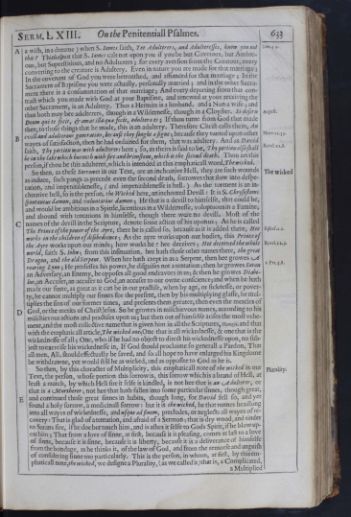 Serm. LXIII.
On the Penitentiall Psalmes.
633
a wish, in a dreame) when S. Iames saith, Yee Adulterers, and Adulteresses,Iam. 4.4. know you not
Serm. LXIII.
On the Penitentiall Psalmes.
633
a wish, in a dreame) when S. Iames saith, Yee Adulterers, and Adulteresses,Iam. 4.4. know you not
this? Thinke not that S. Iames cals not upon you if you be but Covetous, but Ambiti-
ous, but Superstitious, and no Adulteters; for every aversion from the Creatour, every
converting to the creature is Adultery. Even in nature you are made for that marriage;
In the covenant of God you were betroathed, and affianced for that marriage; In the
Sacrament of Baptisme you were actually, personally married; and in the other Sacra-
ment there is a consummation of that marriage; And every departing from that con-
tract which you made with God at your Baptisme, and renewed at your receiving the
other Sacrament, is an Adultery. Thus a Hermite is a husband, and a Nun a wife; and
thus both may bee adulterers, though in a Wildernesse, though in a Cloyster.August. Si deseris
Deum qui te fecit, & amas illa quæ fecit, adultera es; If thou turne from God that made
thee, to those things that he made, this is an adultery. Therefore Christ calls them, An
evill and adulterous generation, because they sought a signe;Matt. 12.39. because they turned upon other
wayes of satisfaction, then he had ordained for them, that was adultery. And as David
saith, Thy portion was with adulterers here; so, as theirs is said to be, Revel. 21.8. Thy portion also shall
be in the lake which burneth with fire and brimstone, which is the second death. Thou art this
person, if thou be this adulterer, which is intended in this emphaticall word, The wicked.
So then, as these Sorrowes in our Text, are an inchoative Hell, The wicked they are such wounds
as induce, such pangs as precede even the second death, sorrowes that flow into despe-
ration, and impenitiblenesse, (and impenitiblenesse is hell.) As the torment is an in-
choative hell, so is the person, the Wicked here, an inchoated Devill: It is S. Chrysostoms
spontaneus dæmon, and voluntarius dæmon; He that is a devill to himselfe, that could be,
and would be ambitious in a Spittle, licentious in a Wildernesse, voluptuous in a Famine,
and abound with tentations in himselfe, though there were no devill. Most of the
names of the devill in the Scripture, denote some action of his upon us; As he is called
The Prince of the power of the Ayre, there he is called so, because as it is added there, Ephes. 2.2. Hee
works in the children of disobedience; As the ayre works upon our bodies, this Prince of
the Ayre works upon our minds; how works he? hee deceives;Revel. 12.9. Hee deceived the whole
world, saith S. Iohn; from this insinuation, hee hath those other names there, the great
Dragon, and the old Serpent. When hee hath crept in as a Serpent, then hee growes A
roaring Lyon; He professes his power, he disguises not a tentation; then he growes Satan1 Pet. 5.8.
an Adversary, an Enemy, he opposes all good endeavors in us; & then he growes Diabo-
lus, an Accuser, an accuser to God, an accuser to our owne conscience; and when he hath
made our sinne, as great as it can be in our practise, when by age, or sicknesse, or pover-
ty, he cannot multiply our sinnes for the present, then by his multiplying glasse, he mul-
tiplies the sins of our former times, and presents them greater, then even the mercies of
God, or the merits of Christ Jesus. So he growes in mischievous names, according to his
mischievous actions and practises upon us; but then out of himselfe arises the most vehe-
ment, and the most collective name that is given him in all the Scriptures, Πονηρὸς, and that
with the emphaticall article, The wicked one; One that is all wickednesse, & one that is the
wickednesse of all; One, who if he had no object to direct his wickednesse upon, no sub-
ject to exercise his wickednesse in, If God should proclaime so generall a Pardon, That
all men, All, should effectually be saved, and so all hope to have enlarged his Kingdome
be withdrawne, yet would still be as wicked, and as opposite to God as he is.
So then, by this character of Multiplicity, Plurality. this emphaticall note of the wicked in our
Text, the person, whose portion this sorrow is, this sorrow which is a brand of Hell, at
least a match, by which Hell fire it selfe is kindled, is not hee that is an Adulterer, or
that is a Murtherer; not hee that hath fallen into some particular sinnes, though great,
and continued those great sinnes in habits, though long, for David fell so, and yet
found a holy sorrow, a medicinall sorrow: but it is the wicked, he that runnes headlong
into all wayes of wickednesse, and usque ad finem, precludes, or neglects all wayes of re-
covery: That is glad of a tentation, and afraid of a Sermon; that is dry wood, and tinder
to Satans fire, if he doe but touch him, and is ashes it selfe to Gods Spirit, if he blow up-
on him; That from a love of sinne, at first, because it is pleasing, comes at last to a love
of sinne, because it is sinne, because it is liberty, because it is a deliverance of himselfe
from the bondage, as he thinks it, of the law of God, and from the remorse and anguish
of considering sinne too particularly. This is the person, in whom, at first, by this em-
phaticall note, the wicked, we designe a Plurality, (as we called it) that is, a Complicated, a Multiplied
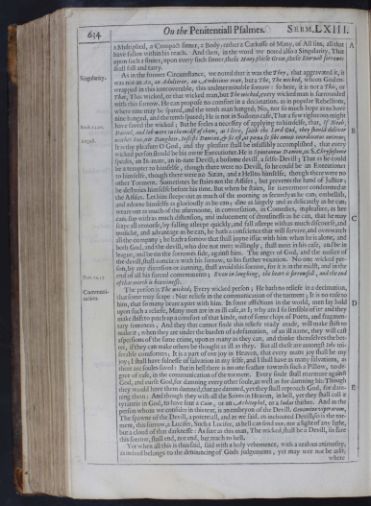 634
On the Penitentiall Psalmes.
Serm. LXIII.
a Multiplied, a Compact sinner, a Body, rather a Carkasse of Many, of All sins, all that
634
On the Penitentiall Psalmes.
Serm. LXIII.
a Multiplied, a Compact sinner, a Body, rather a Carkasse of Many, of All sins, all that
have fallen within his reach. And then, in the word we noted also a Singularity, That
upon such a sinner, upon every such sinner, these Many, these Great, these Eternall sorrowes
shall fall and tarry.
As in the former Circumstance, Singularity. we noted that it was the They, that aggravated it, it
was not an An, an Adulterer, an Ambitious man, but a The, The wicked, whom God en-
wrapped in this irrecoverable, this undeterminable sorrow: so here, it is not a This, or
That, This wicked, or that wicked man, but The wicked, every wicked man is surrounded
with this sorrow. He can propose no comfort in a decimation, as in popular Rebellions,
where nine may be spared, and the tenth man hanged; No, nor so much hope as to have
nine hanged, and the tenth spared; He is not in Sodoms case, That a few righteous might
have saved the wicked;Ezek. 14.20. But he feeles a necessity of applying to himselfe, that, If Noah,
Daniel, and Iob were in the midst of them, as I live, saith the Lord God, they should deliver
neither Son,August. nor Daughter. Iussisti Domine, & sic est, ut pœna sit sibi omnis inordinatus animus;
It is thy pleasure O God, and thy pleasure shall be infallibly accomplished, that every
wicked person should be his owne Executioner. He is Spontaneus Dæmon, as S. Chrysostome
speaks, an In-mate, an in-nate Devill; a bosome devill, a selfe-Devill; That as he could
be a tempter to himselfe, though there were no Devill, so he could be an Executioner
to himselfe, though there were no Satan, and a Hell to himselfe, though there were no
other Torment. Sometimes he staies not the Assises, but prevents the hand of Justice;
he destroies himselfe before his time. But when he staies, he is evermore condemned at
the Assises. Let him sleepe out as much of the morning as securely as he can; embellish,
and adorne himselfe as gloriously as he can; dine as largely and as delicately as he can;
we are out as much of the afternoone, in conversation, in Comedies, in pleasure, as hee
can; sup with as much distension, and inducement of drousinesse as he can, that he may
scape all remorse, by falling asleepe quickly, and fall asleepe with as much discourse, and
musicke, and advantage as he can, he hath a conscience that will survive, and overwatch
all the company; he hath a sorrow that shall joyne issue with him when he is alone, and
both God, and the devill, who doe not meet willingly, shall meet in his case, and be in
league, and be one the sorrowes side, against him. The anger of God, and the malice of
the devill, shall concurre with his sorrow, to his farther vexation. No one wicked per-
son, by any diversion or cunning, shall avoid this sorrow, for it is in the midst, and in the
end of all his forced contentments;Prov. 14.13. Even in laughing, the heart is sorrowfull, and the end
of that mirth is heavinesse.
The person is The wicked;Communi-
cation. Every wicked person; He hath no reliefe in a decimation,
that some may scape: Nor reliefe in the communication of the torment; It is no ease to
him, that so many beare a part with him. In some afflictions in the world, men lay hold
upon such a reliefe, Many men are in as ill case, as I; why am I so sensible of it? and they
make shift to patch up a comfort of that kinde, out of some chips of Poets, and fragmen-
tary sentences; And they that cannot finde this reliefe ready made, will make shift to
make it; when they are under the burden of a defamation, of an ill name, they will cast
aspersions of the same crime, upon as many as they can, and thinke themselves the bet-
ter, if they can make others be thought as ill as they. But all these are amongst Iobs mi-
serable comforters; It is a part of our joy in Heaven, that every mans joy shall be my
joy; I shall have fulnesse of salvation in my selfe, and I shall have as many salvations, as
there are soules saved: But in hell there is no one feather towards such a Pillow, no de-
gree of ease, in the communication of the torment. Every soule shall murmure against
God, and curse God, for damning every other soule, as well as for damning his: Though
they would have them damned, that are damned, yet they shall reproach God, for dam-
ning them: And though they wish all the Saints in Heaven, in hell, yet they shall call it
tyrannie in God, to have sent a Cain, or an Achitophel, or a Iudas thither. And as the
person whom we consider in this text, is an embryon of the Devill, Genimina viperarum,
The spawne of the Devill, a potentiall, and as we said, an inchoated Devill; so is the tor-
ment, this sorrow, a Lucifer, Such a Lucifer, as hell can send out; not a light of any light,
but a cloud of that darknesse: As sure as this man, The wicked, shall be a Devill, so sure
this sorrow, shall end, not end, but reach to hell.
Yet when all this is thus said, said with a holy vehemence, with a zealous animosity,
as indeed belongs to the denouncing of Gods judgements, yet may wee not be askt, where
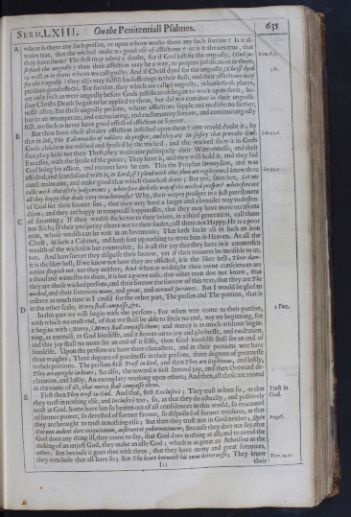 Serm. LXIII.
On the Penitentiall Psalmes.
635
where is there any such person, or upon whom works there any such sorrow? Is it al-
Serm. LXIII.
On the Penitentiall Psalmes.
635
where is there any such person, or upon whom works there any such sorrow? Is it al-waies true, that the wicked make no good use of afflictions? or is it alwaies true, that
they have them? The first may admit a doubt, for if God justifie the ungodly, Rom. 8.5.Rom. 4.5. (God ju-
stifieth the ungodly) then their affliction may be a way, to prepare justification in them,
as well as in them whom we call godly; And if Christ dyed for the ungodly, 5.6. (Christ dyed
for the Vngodly) they also may fulfill his sufferings in their flesh, and their afflictions may
produce good effects. But for that, they which are called ungodly, in both those places,
are only such as were ungodly before Gods justification began to work upon them, be-
fore Christs Death began to be applied to them, but did not continue in their ungodli-
nesse after; But these ungodly persons, whom afflictions supple and mollifie no farther,
but to an intemperate, and excruciating, and exclamatory sorrow, and continue ungodly
still, are such as never have good effect of affliction or sorrow.
But then have these alwaies affliction inflicted upon them? one would doubt it, by
that in Iob, The Tabernacles of robbers do prosper, and they are in safety that provoke God.Iob 12.6.
Gods children are robbed and spoiled by the wicked, and the wicked shew it in Gods
face, they hide not their Theft, they maintaine publiquely their Wantonnesse, and their
Excesses, with the spoile of the poore; They have it, and they will hold it, and they bid
God bring his action, and recover how he can. This the Prophet Ieremy saw, and was
affected, and scandalized with it; O Lord, if I plead with thee, thou art righteous;Ier. 12.1. I know thou
canst maintaine, and make good that which thou hast done; But yet, saies hee, Let me
talke with thee of thy judgements; wherefore doth the way of the wicked prosper? wherefore are
all they happy that deale very treacherously? Why, their wayes prosper in a just punishment
of God for their former sins, that they may have a larger and a broader way to destru-
ction; and they are happy in temporall happinesses, that they may have more occasions
of smarting; If their wealth sticke not to their heires, in a third generation, call them
not Rich; If their prosperity cleave not to their soules, call them not Happy; He is a poor
man, whose wealth can be writ in an Inventorie; That hath lockt all in such an iron
Chest, in such a Cabinet, and hath sent up nothing to meet him in Heaven. As all the
wealth of the wicked is but counterfeit, so is all the joy that they have in it counterfeit
too. And howsoever they disguise their sorrow, yet if their torment be invisible to us,
it is the liker hell; If we know not how they are afflicted, it is the liker hell; Their dam-
nation sleepeth not, nor they neither; And when at midnight their owne consciences are
a thousand witnesses to them, it is but a poore ease, that other men doe not know, that
they are those wicked persons, and their sorrow the sorrow of this text; that they are The
wicked, and their sorrowes many, and great, and eternall sorrowes. But I would be glad to
reserve as much time as I could for the other part, The person and The portion, that is
in the other scale; Mercy shall compasse, &c.
In this part we will begin with the persons; For when wee come to their portion, 2 Part.
with which we must end, of that we shall be able to finde no end, nay no beginning, for
it begins with Mercy, (Mercy shall compasse them) and mercy is as much without begin-
ning, as eternall, as God himselfe, and it flowes on to joy and gladnesse, and exultation,
and this joy shall no more see an end of it selfe, then God himselfe shall see an end of
himselfe. Upon the persons we have three characters, and in their portions wee have
three waights; Three degrees of goodnesse in their persons, three degrees of greatnesse
in their portions. The persons first Trust in God, and then They are Righteous, and lastly,
They are upright in heart; So also, the reward is first Inward joy, and then Outward de-
claration, and lastly, An exemplary working upon others; And then, all these are rooted
in the roote of all, that mercy shall compasse them.
First then They trust in God. And that, first Exclusivè; They trust in him so, Trust in
God. as that
they trust in nothing else, and Inclusivè too; so, as that they do actually, and positively
trust in God. Some have bin so beaten out of all confidences in this world, so evacuated
of former power, so devested of former favour, so dispoiled of former treasures, as that
they are brought to trust in nothing else; But then they trust not in God neither;August. Quia
Deo non audent dare iniquitatem, auferunt ei gubernationem; Because they dare not say, that
God does any thing ill, they come to say, that God does nothing at all; and to avoid the
making of an unjust God, they make an idle God; which is as great an Atheisme as the
other. But because it goes thus with them, that they have many and great sorrowes,
they conclude that all have so; But The heart knoweth his owne bitternesse;Prov. 14.10. They know Iii their
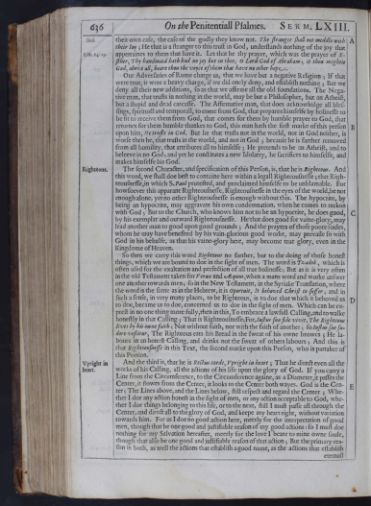 636
On the Penitentiall Psalmes.
Serm. LXIII.
their own case, Ibid. the case of the godly they know not. The stranger shall not meddle with
636
On the Penitentiall Psalmes.
Serm. LXIII.
their own case, Ibid. the case of the godly they know not. The stranger shall not meddle with
their Ioy; He that is a stranger to this trust in God, understands nothing of the joy that
appertaines to them that have it.Esth. 14.19. Let that be thy prayer, which was the prayer of E-
sther, Thy handmaid hath had no joy but in thee, O Lord God of Abraham; O thou mightie
God, above all, heare thou the voyce of them that have no other hope.
Our Adversaries of Rome charge us, that we have but a negative Religion; If that
were true, it were a heavy charge, if we did onely deny, and establish nothing; But we
deny all their new additions, so as that we affirme all the old foundations. The Nega-
tive man, that trusts in nothing in the world, may be but a Philosopher, but an Atheist,
but a stupid and dead carcasse. The Affirmative man, that does acknowledge all bles-
sings, spirituall and temporall, to come from God, that prepares himselfe by holinesse to
be fit to receive them from God, that comes for them by humble prayer to God, that
returnes for them humble thankes to God, this man hath the first marke of this person
upon him, He trusts in God. But he that trusts not in the world, nor in God neither, is
worse then he, that trusts in the world, and not in God; because he is farther removed
from all humility, that attributes all to himselfe; He pretends to be an Atheist, and to
beleeve in no God; and yet he constitutes a new Idolatry, he sacrifices to himselfe, and
makes himselfe his God.
The second Character, Righteous. and specification of this Person, is, that he is Righteous. And
this word, we shall doe best to containe here within a legall Righteousnesse; that Righ-
teousnesse, in which S. Paul protested, and proclaimed himselfe to be unblamable. For
howsoever this apparant Righteousnesse, Righteousnesse in the eyes of the world, be not
enough alone, yet no other Righteousnesse is enough without this. The hypocrite, by
being an hypocrite, may aggravate his own condemnation, when he comes to reckon
with God; But to the Church, who knows him not to be an hypocrite, he does good,
by his exemplar and outward Righteousnesse. He that does good for vaine-glory, may
lead another man to good upon good grounds; And the prayers of those poore soules,
whom he may have benefited by his vain-glorious good worke, may prevaile so with
God in his behalfe, as that his vaine-glory here, may become true glory, even in the
Kingdome of Heaven.
So then we carry this word Righteous no farther, but to the doing of those honest
things, which we are bound to doe in the sight of men. The word is Tzadok, which is
often used for the exaltation and perfection of all true holinesse; But as it is very often
in the old Testament taken for Verax and Æquus, when a mans word and worke answer
one another towards men; so in the New Testament, in the Syriake Translation, where
the word is the same as in the Hebrew, it is Oportuit, It behoved Christ to suffer; and in
such a sense, in very many places, to be Righteous, is to doe that which it behoved us
to doe, became us to doe, concerned us to doe in the sight of men. Which can be ex-
prest in no one thing more fully, then in this, To embrace a lawfull Calling, and to walke
honestly in that Calling; That is Righteousnesse; For, Iustus sua fide vivit, The Righteous
lives by his owne faith; Not without faith, nor with the faith of another; so Iustus suo su-
dore vescitur, The Righteous eats his Bread in the sweat of his owne browes; He la-
bours in an honest Calling, and drinks not the sweat of others labours; And this is
that Righteousnesse in this Text, the second marke upon this Person, who is partaker of
this Portion.
And the third is, Vpright in
heart. that he is Rectus corde, Vpright in heart; That he direct even all the
works of his Calling, all the actions of his life upon the glory of God. If you carry a
Line from the Circumference, to the Circumference againe, as a Diameter, it passes the
Center, it flowes from the Center, it looks to the Center both wayes. God is the Cen-
ter; The Lines above, and the Lines below, still respect and regard the Center; Whe-
ther I doe any action honest in the sight of men, or any action acceptable to God, whe-
ther I doe things belonging to this life, or to the next, still I must passe all through the
Center, and direct all to the glory of God, and keepe my heart right, without variation
towards him. For as I doe no good action here, meerly for the interpretation of good
men, though that be one good and justifiable reason of my good actions: so I must doe
nothing for my Salvation hereafter, meerly for the love I beare to mine owne soule,
though that also be one good and justifiable reason of that action; But the primary rea-
son in both, as well the actions that establish a good name, as the actions that establish eternall
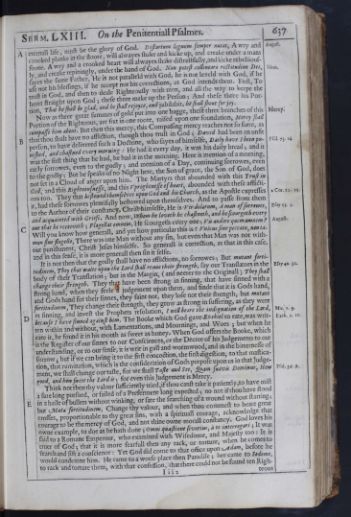 Serm. LXIII.
On the Penitentiall Psalmes.
637
eternall life, must be the glory of God. Distortum lignum semper nutat, August. A wry and
Serm. LXIII.
On the Penitentiall Psalmes.
637
eternall life, must be the glory of God. Distortum lignum semper nutat, August. A wry and
crooked planke in the floore, will alwayes shake and kicke up, and creake under a mans
foote. A wry and a crooked heart will alwayes shake distrustfully, and kicke rebellious-
ly, and creake repiningly, under the hand of God. Non potest collineari rectitudine Dei, Idem.
sayes the same Father, He is not paralleld with God, he is not leveld with God, if he
use not his blessings, if he accept not his corrections, as God intends them. First, To
trust in God, and then to deale Righteously with men, and all the way to keepe the
heart straight upon God; these three make up the Person; And these three his Por-
tion, That he shall be glad, and he shall rejoyce, and jubilabit, he shall shout for joy.
Now as three great summes of gold put into one bagge, Mercy. these three branches of this
Portion of the Righteous, are fixt in one roote, raised upon one foundation, Mercy shall
compasse him about. But then this mercy, this Compassing mercy reaches not so farre, as
that thou shalt have no affliction, though thou trust in God; David had been an unfit
person, to have delivered such a Doctrine, who sayes of himselfe, Psal. 73.14. Daily have I been pu-
nished, and chastned every morning: He had it every day, it was his daily bread; and it
was the first thing that he had, he had it in the morning. Here is mention of a morning,
early sorrowes, even to the godly; and mention of a Day, continuing sorrowes, even
to the godly; But he speaks of no Night here, the Son of grace, the Son of God, does
not set in a Cloud of anger upon him. The Martyrs that abounded with this Trust in
God, and this Righteousnesse, and this Vprightnesse of heart, abounded with these afflicti-
ons too. They that bestowed themselves upon God and his Church, 2 Cor. 12.15. as the Apostle expresses
it, had these sorrowes plentifully bestowed upon themselves. And to passe from them
to the Author of their constancy, Christ himselfe, He is Vir dolorum, A man of sorrowes, Esay 53.3.
and acquainted with Griefe. And now, Whom he loveth he chastneth, and he scourgeth every
one that he receiveth; Flagellat omnem, He scourgeth every one; Vis audire quem omnem?August.
Will you know how generall, and yet how particular this is? Vnicus sine peccato, non ta-
men sine flagello, There was one Man without any sin, but even that Man was not with-
out punishment, Christ Jesus himselfe. So generall is correction, as that in this case,
and in this sense, it is more generall then sin it selfe.
It is not then that the godly shall have no afflictions, no sorrowes; But mutant forti-
tudinem, They that waite upon the Lord shall renue their strength,Esay 40.31. say our Translators in the
body of their Translation; but in the Margin, (and neerer to the Originall) They shall
change their strength. They that have been strong in sinning, that have sinned with a
strong hand, when they feele a judgement upon them, and finde that it is Gods hand,
and Gods hand for their sinnes, they faint not, they lose not their strength, but mutant
fortitudinem, They change their strength, they grow as strong in suffering, as they were
in sinning, and invest the Prophets resolution, I will beare the indignation of the Lord, Mic. 7.9.
because I have sinned against him. The Booke which God gave Ezekiel to eate, was Ezek. 2.10. writ-
ten within and without, with Lamentations, and Mournings, and Woes; but when he
eate it, he found it in his mouth as sweet as honey. When God offers the Booke, which
is the Register of our sinnes to our Consciences, or the Decree of his Judgements to our
understanding, or to our sense, it is writ in gall and wormwood, and in the bitternesse of
sorrow; but if we can bring it to the first concoction, the first digestion, to that mastica-
tion, that rumination, which is the consideration of Gods purpose upon us in that Judge-
ment, we shall change our taste, for we shall Taste and See, Quam suavis Dominus, Psal. 34.9. How
good, and how sweet the Lord is; for even this Judgement is Mercy.
Think not then thy valour sufficiently tried, if thou canst take it patiently, to have mist
a sute long pursued, or failed of a Preferment long expected; no not if thou have stood
in a haile of bullets without winking, or sate the searching of a wound without starting;
but Muta fortitudinem, Change thy valour, and when thou commest to beare great
crosses, proportionable to thy great sins, with a spirituall courage, acknowledge that
courage to be the mercy of God, and not thine owne morall constancy. God loves his
owne example, to doe as he hath done; Omni quæstione severius, à te interrogari; It was
said to a Romane Emperour, who examined with Wisedome, and Majesty too: It is
truer of God; that it is more fearfull then any rack, or torture, when he comes to
search and sift a conscience: Yet God did come to that office upon Adam, before he
would condemne him. He came to a worse place then Paradise; hee came to Sodome,
to rack and torture them, with that confession, that there could not be found ten Righ-
Iii2 teous
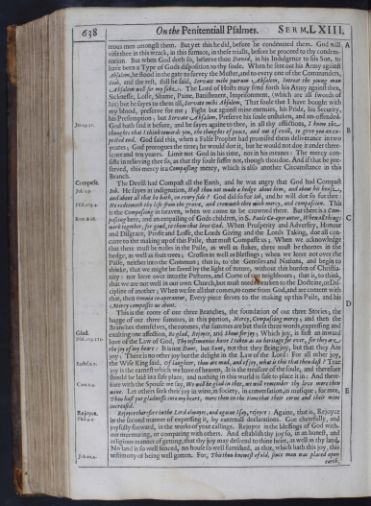 638
On the Penitentiall Psalmes.
Serm. LXIII.
teous men amongst them. But yet this he did, before he condemned them. God will
638
On the Penitentiall Psalmes.
Serm. LXIII.
teous men amongst them. But yet this he did, before he condemned them. God will
visit thee in this wrack, in this furnace, in these trialls, before he proceed to thy condem-
nation. But when God doth so, beleeve thou David, in his Indulgence to his Son, to
have been a Type of Gods disposition to thy soule. When he sent out his Army against
Absalom, he stood in the gate to survey the Muster, and to every one of the Commanders,
Ioab, and the rest, still he said, Servate mihi puerum Absalom, Intreat the young man
Absalom well for my sake. The Lord of Hosts may send forth his Army against thee,
Sicknesse, Losse, Shame, Paine, Banishment, Imprisonment, (which are all swords of
his) but he sayes to them all, Servate mihi Absalom, That soule that I have bought with
my blood, preserve for me; Fight but against mine enemies, his Pride, his Security,
his Presumption; but Servate Absalom, Preserve his soule unshaken, and un-offended.
God hath said it before, Jer. 29.11. and he sayes againe to thee, in all thy afflictions, I know the
thoughts that I think towards you, the thoughts of peace, and not of evill, to give you an ex-
pected end. God said this, when a False Prophet had promised them deliverance in two
yeares; God prorogues the time; he would doe it, but he would not doe it under three-
score and ten yeares. Limit not God in his time, nor in his meanes; The mercy con-
sists in relieving thee so, as that thy soule suffer not, though thou doe. And if that be pre-
served, this mercy is a Compassing mercy, which is also another Circumstance in this
Branch.
The Devill had Compast all the Earth, Compasse. and he was angry that God had Compast
Iob. He sayes in indignation, Job 1.9. Hast thou not made a hedge about him, and about his house,
and about all that he hath, on every side? God did so for Iob, and he will doe so for thee:
He redeemeth thy life from the grave,Psal. 103.4. and crowneth thee with mercy, and compassion. This
is the Compassing in heaven, when we come to be crowned there. But there is a Com-
passing here, Rom 8 .28. and an empailing of Gods children, in S. Pauls Co-operantur, When all things
work together, for good, to them that love God. When Prosperity and Adversity, Honour
and Disgrace, Profit and Losse, the Lords Giving and the Lords Taking, doe all con-
curre to the making up of this Paile, that must Compasse us; When we acknowledge
that there must be nailes in the Paile, as well as stakes, there must be thornes in the
hedge, as well as fruit trees; Crosses as well as Blessings; when we leere not over the
Paile, neither into the Common; that is, to the Gentiles and Nations, and begin to
thinke, that we might be saved by the light of nature, without this burden of Christia-
nity: nor leere over into the Pastures, and Corne of our neighbours; that is, to think,
that we are not well in our own Church, but must needs hearken to the Doctrine, or Dis-
cipline of another; When we see all that comes, to come from God, and are content with
that, then Omnia co-operantur, Every piece serves to the making up this Paile, and his
Mercy compasses us about.
This is the roote of our three Branches, the foundation of our three Stories; the
bagge of our three summes, in this portion, Mercy, Compassing mercy; and then the
Branches themselves, the roomes, the summes are but these three words, expressing and
exalting one affection, Be glad, Rejoyce, and Shout for joy; Which joy, is first an inward Glad.
love of the Law of God, Psal. 119.111. Thy testimonies have I taken as an heritage for ever, for they are
the joy of my heart: It is not Dant, but Sunt, not that they Bring joy, but that they Are
joy; There is no other joy but the delight in the Law of the Lord: For all other joy,
the Wise King said, Eccles. 2.2. Of laughter, thou art mad, and of joy, what is this that thou dost? True
joy is the earnest which we have of heaven, It is the treasure of the soule, and therefore
should be laid in a safe place, and nothing in this world is safe to place it in: And there-
fore with the Spouse we say, Cant. 1.4. We will be glad in thee, we will remember thy love more then
wine. Let others seek their joy in wine, in society, in conversation, in musique; for mee,
Thou hast put gladnesse into my heart, more then in the time that their corne and their wine
increased.
Rejoyce therefore in the Lord alwayes,Rejoyce. and againe I say, rejoyce: Againe, that is, Rejoyce
in the second manner of expressing it, by externall declarations. Goe chearfully, andPhil. 4.4.
joyfully forward, in the works of your callings. Rejoyce in the blessings of God with-
out murmuring, or comparing with others. And establish thy joy so, in an honest, and
religious manner of getting, that thy joy may descend to thine heire, as well as thy land.
No land is so well fenced, no house so well furnished, as that, which hath this joy, this
testimony of being well gotten.Job 20.4. For, This thou knowest of old, since man was placed upon earth,
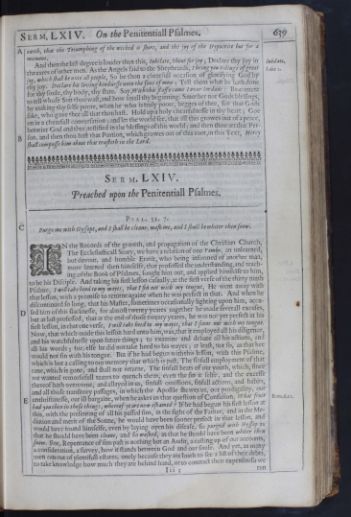 Serm. LXIV.
On the Penitentiall Psalmes.
639
earth, that the Triumphing of the wicked is short, and the joy of the Hypocrite but for a
Serm. LXIV.
On the Penitentiall Psalmes.
639
earth, that the Triumphing of the wicked is short, and the joy of the Hypocrite but for a
moment.
And then the last degree is louder then this, Iubilate, Shout for joy;Iubilate. Declare thy joy in
the eares of other men. As the Angels said to the Shepheards, Luke 2. I bring you tidings of great
joy, which shall be unto all people, So be thou a chearfull occasion of glorifying God by
thy joy. Declare his loving kindnesse unto the sons of men; Tell them what he hath done
for thy soule, thy body, thy state. Say, With this staffe came I over Iordane: Be content
to tell whose Son thou wast, and how small thy beginning. Smother not Gods blessings,
by making thy selfe poore, when he who is truly poore, begges of thee, for that Gods
sake, who gave thee all that thou hast. Hold up a holy chearfulnesse in thy heart; Goe
on in a chearfull conversation; and let the world see, that all this growes out of a peace,
betwixt God and thee, testified in the blessings of this world; and then thou art that Per-
son, and then thou hast that Portion, which growes out of this root, in this Text, Mercy
shall compasse him about that trusteth in the Lord.
Serm. LXIV.
Preached upon the Penitentiall Psalmes.
Psal. 51.7.
Purge me with Hyssope, and I shall be cleane; wash me, and I shall be whiter then snow.
INIn the Records of the growth, and propagation of the Christian Church,
The Ecclesiasticall Story, we have a relation of one Pambo, an unlearned,
but devout, and humble Ermit, who being informed of another man,
more learned then himselfe, that professed the understanding, and teach-
ing of the Book of Psalmes, sought him out, and applied himselfe to him,
to be his Disciple. And taking his first lesson casually, at the first verse of the thirty ninth
Psalme, I will take heed to my wayes, that I sin not with my tongue, He went away with
that lesson, with a promise to returne againe when he was perfect in that. And when he
discontinued so long, that his Master, sometimes occasionally lighting upon him, accu-
sed him of this slacknesse, for almost twenty yeares together he made severall excuses,
but at last professed, that at the end of those twenty yeares, he was not yet perfect in his
first lesson, in that one verse, I will take heed to my wayes, that I sinne not with my tongue.
Now, that which made this lesson hard unto him, was, that it employed all his diligence,
and his watchfulnesse upon future things; to examine and debate all his actions, and
all his words; for, else he did not take heed to his wayes; at least, not so, as that hee
would not sin with his tongue. But if he had begun with this lesson, with this Psalme,
which is but a calling to our memory that which is past, The sinfull employment of that
time, which is gone, and shall not returne, The sinfull heats of our youth, which, since
we wanted remorsefull teares to quench them, even the sin it selfe, and the excesse
thereof hath overcome, and allayed in us, sinfull omissions, sinfull actions, and habits,
and all those transitory passages, in which the Apostle shewes us, our prodigality, our
unthriftinesse, our ill bargaine, when he askes us that question of Confusion, Rom. 6.21. What fruit
had you then in those things, whereof ye are now ashamed? If he had begun his first lesson at
this, with the presenting of all his passed sins, in the sight of the Father, and in the Me-
diation and merit of the Sonne, he would have been sooner perfect in that lesson, and
would have found himselfe, even by laying open his disease, so purged with Hyssop as
that he should have been cleane, and so washed, as that he should have been whiter then
snow. For, Repentance of sins past is nothing but an Audit, a casting up of our accounts,
a consideration, a survey, how it stands between God and our soule. And yet, as many
men run out of plentifull estates, onely because they are loath to see a list of their debts,
to take knowledge how much they are behind hand, or to contract their expenses: so we Iii3 run
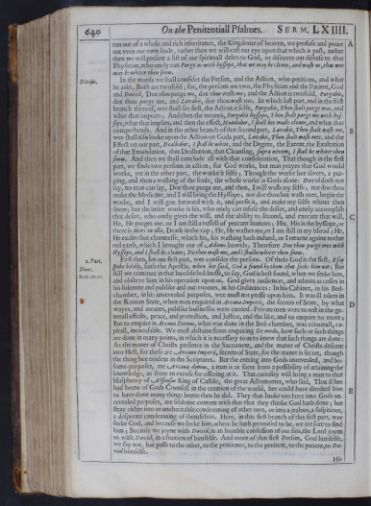 640
On the Penitentiall Psalmes.
Serm. LXIIII.
run out of a whole and rich inheritance, the Kingdome of heaven, we profuse and poure
640
On the Penitentiall Psalmes.
Serm. LXIIII.
run out of a whole and rich inheritance, the Kingdome of heaven, we profuse and poure
out even our own soule, rather then we will cast our eye upon that which is past, rather
then we will present a list of our spirituall debts to God, or discover our disease to that
Physician, who onely can Purge us with hyssope, that we may be cleane, and wash us, that wee
may be whiter then snow.
In the words we shall consider the Person, Divisio. and the Action, who petitions, and what
he asks. Both are twofold; for, the persons are two, the Physitian and the Patient, God
and David, Doe thou purge me, doe thou wash me; and the Action is twofold, Purgabis,
doe thou purge me, and Lavabis, doe thou wash me. In which last part, and in the first
branch thereof, wee shall see first, the Action it selfe, Purgabis, Thou shalt purge mee, and
what that imports; And then the meanes, Purgabis hyssopo, Thou shalt purge me with hys-
sope, what that implies; and then the effect, Mundabor, I shall bee made cleane, and what that
comprehends. And in the other branch of that second part, Lavabis, Thou shalt wash me,
wee shall also looke upon the Action on Gods part, Lavabis, Thou shalt wash mee, and the
Effect on our part, Dealbabor, I shall be white, and the Degree, the Extent, the Exaltation
of that Emundation, that Dealbation, that Cleansing, supra nivem, I shall be whiter then
snow. And then we shall conclude all with that consideration, That though in the first
part, we finde two persons in action; for God works, but man prayes that God would
worke, yet in the other part, the worke it selfe; Though the worke bee divers, a pur-
ging, and then a washing of the soule, the whole worke is Gods alone: David doth not
say, no man can say, Doe thou purge me, and then, I will wash my selfe; nor doe thou
make the Medicine, and I will bring the Hyssope; nor doe thou but wash mee, begin the
worke, and I will goe forward with it, and perfit it, and make my selfe whiter then
snow; but the intire worke is his, who onely can infuse the desire, and onely accomplish
that desire, who onely gives the will, and the ability to second, and execute that will,
He, He purges me, or I am still a vessell of peccant humors; His, His is the hyssope, or
there is Mors in olla, Death in the cup; He, He washes me, or I am still in my blood; He,
He exalts that cleannesse, which his, his washing hath indued, or I returne againe to that
red earth, which I brought out of Adams bowels; Therefore Doe thou purge mee with
Hyssope, and I shall be cleane; Do thou wash me, and I shalbe whiter then snow.
First then, 1. Part. for our first part, wee consider the persons. Of these God is the first; Esay
spoke boldly, Deus. saith the Apostle, when hee said, God is found by them that seeke him not; But
still we continue in that humble boldnesse, Rom. 10.20. to say, God is best found, when we seeke him,
and observe him in his operation upon us. God gives audiences, and admits accesses in
his solemne and publike and out-roomes, in his Ordinances: In his Cabinet, in his Bed-
chamber, in his unrevealed purposes, wee must not presse upon him. It was ill taken in
the Roman State, when men enquired in Arcana Imperii, the secrets of State, by what
wayes, and meanes, publike businesses were carried: Private men were to rest in the ge-
nerall effects, peace, and protection, and Justice, and the like, and to enquire no more;
But to enquire in Arcana Domus, what was done in the Bed-chamber, was criminall, ca-
pitall, inexcusable. We must abstaine from enquiring De modo, how such or such things
are done in many points, in which it is necessary to us to know that such things are done:
As the maner of Christs presence in the Sacrament, and the maner of Christs descent
into Hell, for these are Arcana Imperii, secrets of State, for the maner is secret, though
the thing bee evident in the Scriptures. But the entring into Gods unrevealed, and bo-
some-purposes, are Arcana domus, a man is as farre from a possibility of attaining the
knowledge, as from an excuse for offering at it. That curiosity will bring a man to that
blasphemy of Alfonsus King of Castile, the great Astronomer, who said, That if hee
had beene of Gods Counsell in the creation of the world, hee could have directed him
to have done many things better then he did. They that looke too farre into Gods un-
revealed purposes, are seldome content with that that they thinke God hath done; but
stray either into an uncharitable condemning of other men, or into a jealous, a suspitious,
a desperate condemning of themselves. Here, in this first branch of this first part, wee
seeke God, and because we seeke him, where he hath promised to be, we are sure to find
him; Because we joyne with David, in an humble confession of our sins, the Lord joyns
us with David, in a fruition of himselfe. And more of that first Person, God himselfe,
we say not, but passe to the other, to the petitioner, to the penitent, to the patient, to Da-
vid himselfe. His
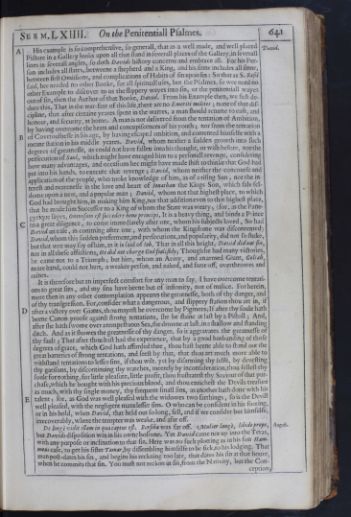 Serm. LXIIII.
On the Penitentiall Psalmes.
641
Serm. LXIIII.
On the Penitentiall Psalmes.
641
His example is so comprehensive, so generall, that as a well made, David. and well placed
Picture in a Gallery looks upon all that stand in severall places of the Gallery, in severall
lines in severall angles, so doth Davids history concerne and embrace all. For his Per-
son includes all states, betweene a shepherd and a King, and his sinne includes all sinne,
between first Omissions, and complications of Habits of sin upon sin: So that as S. Basil
said, hee needed no other Booke, for all spirituall uses, but the Psalmes, so wee need no
other Example to discover to us the slippery wayes into sin, or the penitentiall wayes
out of sin, then the Author of that Booke, David. From his Example then, we first de-
duce this, That in the war-fare of this life, there are no Emeriti milites; none of that dis-
cipline, that after certaine yeares spent in the warres, a man should returne to ease, and
honour, and security, at home. A man is not delivered from the tentation of Ambition,
by having overcome the heats and concupiscences of his youth; nor from the tentation
of Covetousnesse in his age, by having escaped ambition, and contented himselfe with a
meane station in his middle yeares. David, whom neither a sudden growth into such
degrees of greatnesse, as could not have fallen into his thought, or wish before, nor the
persecution of Saul, which might have enraged him to a personall revenge, considering
how many advantages, and occasions hee might have made shift to thinke that God had
put into his hands, to execute that revenge; David, whom neither the concourse and
application of the people, who tooke knowledge of him, as of a rising Sun, nor the in-
terest and nearenesse in the love and heart of Ionathan the Kings Son, which fals sel-
dome upon a new, and a popular man; David, whom not that highest place, to which
God had brought him, in making him King, nor that addition even to that highest place,
that he made him Successor to a King of whom the State was weary; (for, as the Pane-
gyrique sayes, Onerosum est succedere bono principi, It is a heavy thing, and binds a Prince
to a great diligence, to come immediately after one, whom his subjects loved, So had
David an ease, in comming after one, with whom the Kingdome was discontented)
David, whom this sudden preferment, and persecutions, and popularity, did not so shake,
but that wee may say of him, as it is said of Iob, That in all this height, David did not sin,
nor in all these afflictions, He did not charge God foolishly; Though he had many victories,
he came not to a Triumph; but him, whom an Army, and an armed Giant, Goliah,
neare hand, could not hurt, a weaker person, and naked, and farre off, overthrowes and
ruines.
It is therefore but an imperfect comfort for any man to say, I have overcome tentati-
ons to great sins, and my sins have beene but of infirmity, not of malice. For herein,
more then in any other contemplation appeares the greatnesse, both of thy danger, and
of thy transgression. For, consider what a dangerous, and slippery station thou art in, if
after a victory over Giants, thou mayest be overcome by Pigmees; If after thy soule hath
beene Canon proofe against strong tentations, she be slaine at last by a Pistoll; And,
after she hath swome over a tempestuous Sea, she drowne at last, in a shallow and standing
ditch. And as it showes the greatnesse of thy danger, so it aggravates the greatnesse of
thy fault; That after thou hast had the experience, that by a good husbanding of those
degrees of grace, which God hath afforded thee, thou hast beene able to stand out the
great batteries of strong tentations, and seest by that, that thou art much more able to
withstand tentations to lesser sins, if thou wilt, yet by disarming thy selfe, by devesting
thy garisons, by discontinuing thy watches, meerely by inconsideration, thou sellest thy
soule for nothing, for little pleasure, little profit, thou frustratest thy Saviour of that pur-
chase, which he bought with his precious blood, and thou enrichest the Devils treasure
as much, with thy single money, thy frequent small sins, as another hath done with his
talent; for, as God was well pleased with the widowes two farthings, so is the Devill
well pleased, with the negligent mans lesser sins. O who can be confident in his footing,
or in his hold, when David, that held out so long, fell, and if we consider but himselfe,
irrecoverably, where the tempter was weake, and afar off.
De longè vidit illam in qua captus est. Berseba was far off. Mulier longè, libido prope, August.
but Davids disposition was in his owne bosome. Yet David came not up into the Teras,
with any purpose or inclination to that sin. Here was no such plotting as in his son Ham-
mons case, to get his sister Tamar, by dissembling himselfe to be sick, to his lodging. That
man post-dates his sin, and begins his reckning too late, that dates his sin at that houre,
when he commits that sin. You must not reckon in sin, from the Nativity, but the Con-
ception;
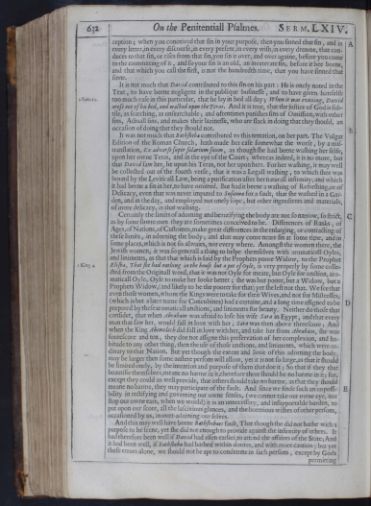 632
On the Penitentiall Psalmes.
Serm. LXIV.
ception; when you conceived that sin in your purpose, then you sinned that sin, and in
632
On the Penitentiall Psalmes.
Serm. LXIV.
ception; when you conceived that sin in your purpose, then you sinned that sin, and in
every letter, in every discourse, in every present, in every wish, in every dreame, that con-
duces to that sin, or rises from that sin, you sin it over, and over againe, before you come
to the committing of it, and so your sin is an old, an inveterate sin, before it bee borne,
and that which you call the first, is not the hundredth time, that you have sinned that
sinne.
It is not much that David contributed to this sin on his part: He is onely noted in the
Text, to have beene negligent in the publique businesse, and to have given himselfe
too much ease in this particular, 2 Sam. 11. that he lay in bed all day; When it was evening, David
arose out of his bed, and walked upon the Teras. And it is true, that the justice of God is sub-
tile, as searching, as unsearchable; and oftentimes punishes sins of Omission, with other
sins, Actuall sins, and makes their lazinesse, who are slack in doing that they should, an
occasion of doing that they should not.
It was not much that Bathsheba contributed to this tentation, on her part. The Vulgat
Edition of the Roman Church, hath made her case somewhat the worse, by a mis-
translation, Ex adverso super solarium suum, as though she had beene washing her selfe,
upon her owne Teras, and in the eye of the Court; whereas indeed, it is no more, but
that David saw her, he upon his Teras, not her upon hers. For her washing, it may well
be collected out of the fourth verse, that it was a Legall washing, to which shee was
bound by the Leviticall Law, being a purification after her naturall infirmity, and which
it had beene a sin in her, to have omitted. But had it beene a washing of Refreshing, or of
Delicacy, even that was never imputed to Susanna for a fault, that she washed in a Gar-
den, and in the day, and employed not onely sope, but other ingredients and materials,
of more delicacy, in that washing.
Certainly the limits of adorning and beautifying the body are not so narrow, so strict,
as by some sowre men they are sometimes conceived to be. Differences of Ranks, of
Ages, of Nations, of Customes, make great differences in the enlarging, or contracting of
these limits, in adorning the body; and that may come neare sin at some time, and in
some places, which is not so alwaies, nor every where. Amongst the women there, the
Jewish women, it was so generall a thing to helpe themselves with aromaticall Oyles,
and liniments, as that that which is said by the Prophets poore Widow, to the Prophet
Elisha,2 King. 4. That she had nothing in the house but a pot of Oyle, is very properly by some colle-
cted from the Originall word, that it was not Oyle for meate, but Oyle for unction, aro-
maticall Oyle, Oyle to make her looke better; she was but poore, but a Widow, but a
Prophets Widow, (and likely to be the poorer for that) yet she left not that. We see that
even those women, whom the Kings were to take for their Wives, and not for Mistresses,
(which is but a later name for Concubines) had a certaine, and a long time assigned to be
prepared by these aromaticall unctions, and liniments for beauty. Neither do those that
consider, that when Abraham was afraid to lose his wife Sara in Egypt, and that every
man that saw her, would fall in love with her, Sara was then above threescore; And
when the King Abimelech did fall in love with her, and take her from Abraham, she was
fourescore and ten, they doe not assigne this preservation of her complexion, and ha-
bitude to any other thing, then the use of those unctions, and liniments, which were or-
dinary to that Nation. But yet though the extent and limit of this adorning the body,
may be larger then some austere persons will allow, yet it is not so large, as that it should
be limited onely, by the intention and purpose of them that doe it; So that if they that
beautifie themselves, meane no harme in it, therefore there should be no harme in it; for,
except they could as well provide, that others should take no harme, as that they should
meane no harme, they may participate of the fault. And since we finde such an impossi-
bility in rectifying and governing our owne senses, (we cannot take our owne eye, nor
stop our owne eare, when we would) it is an unnecessary, and insupportable burden, to
put upon our score, all the lascivious glances, and the licentious wishes of other persons,
occasioned by us, in over-adorning our selves.
And this may well have beene Bathshebaes fault, That though she did not bathe with a
purpose to be seene, yet she did not enough to provide against the infirmity of others. It
had therefore been well if David had risen earlier, to attend the affaires of the State; And
it had been well, if Bathsheba had bathed within doores, and with more caution; but yet
these errors alone, we should not be apt to condemne in such persons, except by Gods permitting
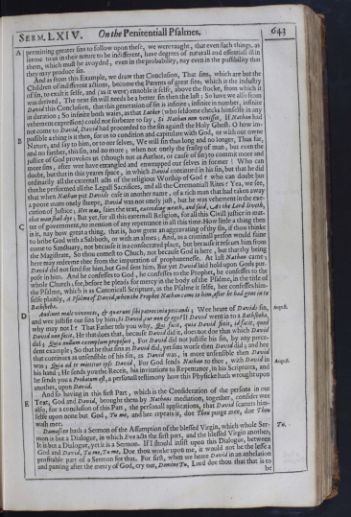 Serm. LXIV.
On the Penitentiall Psalmes.
643
permitting greater sins to follow upon these, we were taught, that even such things, as
Serm. LXIV.
On the Penitentiall Psalmes.
643
permitting greater sins to follow upon these, we were taught, that even such things, as
seeme to us in their nature to be indifferent, have degrees of naturall and essentiall ill in
them, which must be avoyded, even in the probability, nay even in the possibility that
they may produce sin.
And as from this Example, we draw that Conclusion, That sins, which are but the
Children of indifferent actions, become the Parents of great sins; which is the industry
of sin, to exalt it selfe, and (as it were) ennoble it selfe, above the stocke, from which it
was derived, The next sin will needs be a better sin then the last: So have we also from
David this Conclusion, that this generation of sin is infinite; infinite in number, infinite
in duration; So infinite both waies, as that Luther (who seldome checks himselfe in any
vehement expression) could not forbeare to say, Si Nathan non venisset, If Nathan had
not come to David, David had proceeded to the sin against the Holy Ghost. O how im-
possible a thing is it then, for us to condition and capitulate with God, or with our owne
Nature, and say to him, or to our selves, We will sin thus long and no longer, Thus far,
and no farther, this sin, and no more; when not onely the frailty of man, but even the
justice of God provokes us (though not as Author, or cause of sin) to commit more and
more sins, after wee have entangled and enwrapped our selves in former! Who can
doubt, but that in this yeares space, in which David continued in his sin, but that he did
ordinarily all the externall acts of the religious Worship of God? who can doubt but
that he performed all the Legall Sacrifices, and all the Ceremoniall Rites? Yea, we see,
that when Nathan put Davids case in another name, of a rich man that had taken away
a poore mans onely sheepe, David was not onely just, but he was vehement in the exe-
cution of Justice; Hee was, saies the text, exceeding wroth, and said, As the Lord liveth,
that man shall dye; But yet, for all this externall Religion, for all this Civill justice in mat-
ter of government, no mention of any repentance in all this time. How little a thing then
is it, nay how great a thing, that is, how great an aggravating of thy sin, if thou thinke
to bribe God with a Sabboth, or with an almes; And, as a criminall person would faine
come to Sanctuary, not because it is a consecrated place, but because it rescues him from
the Magistrate, So thou comest to ChuchChurch, not because God is here, but that thy being
here may redeeme thee from the imputation of prophanenesse. At last Nathan came;
David did not send for him, but God sent him; But yet David laid hold upon Gods pur-
pose in him. And he confesses to God, he confesses to the Prophet, he confesses to the
whole Church; for, before he pleads for mercy in the body of the Psalme, in the title of
the Psalme, which is as Canonicall Scripture, as the Psalme it selfe, hee confesses him-
selfe plainly, A Psalme of David, when the Prophet Nathan came to him, after he had gone in to
Bathsheba.
Audiunt male viventes, & quærunt sibi patrocinia peccandi; Wee heare of Davids sin, August.
and wee justifie our sins by him; Si David, cur non & ego? If David went in to a Bathsheba,
why may not I? That Father tels you why, Qui facit, quia David fecit, id facit, quod
David non fecit, He that does that, because David did it, does not doe that which David
did; Quia nullum exemplum proposuit, For David did not justifie his sin, by any prece-
dent example; So that he that sins as David did, yet sins worse then David did; and hee
that continues as unsensible of his sin, as David was, is more unsensible then David
was; Quia ad te mittitur ipse David, For God sends Nathan to thee, August. with David in
his hand; He sends you the Receit, his invitations to Repentance, in his Scriptures, and
he sends you a Probatum est, a personall testimony how this Physicke hath wrought upon
another, upon David.
And so having in this first Part, which is the Consideration of the persons in our
Text, God and David, brought them by Nathans mediation, together, consider wee
also, for a conclusion of this Part, the personall applications, that David scatters him-
selfe upon none but God, Tu me, and hee repeats it, doe Thou purge mee, doe Thou
wash mee.
Damascen hath a Sermon of the Assumption of the blessed Virgin, which whole Tu. Ser-
mon is but a Dialogue, in which Eve acts the first part, and the blessed Virgin another;
It is but a Dialogue, yet it is a Sermon. If I should insist upon this Dialogue, between
God and David, Tu me, Tu me, Doe thou worke upon me, it would not be the lesse a
profitable part of a Sermon for that. For first, when we heare David in an anhelation
and panting after the mercy of God, cry out, Domine Tu, Lord doe thou that that is to be
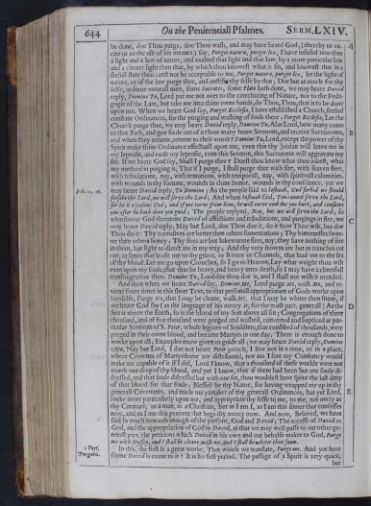 644
On the Penitentiall Psalmes.
Serm. LXIV.
be done, doe Thou purge, doe Thou wash, and may have heard God, (thereby to ex-
644
On the Penitentiall Psalmes.
Serm. LXIV.
be done, doe Thou purge, doe Thou wash, and may have heard God, (thereby to ex-cite us to the use of his meanes) say, Purget natura, purget lex, I have infused into thee
a light and a law of nature, and exalted that light and that law, by a more particular law
and a clearer light then that, by which thou knowest what is sin, and knowest that in a
sinfull state thou canst not be acceptable to me, Purget natura, purget lex, let the light of
nature, or of the law purge thee, and rectifie thy selfe by that; Doe but as much for thy
selfe, as some naturall men, some Socrates, some Plato hath done, we may heare David
reply, Domine Tu, Lord put me not over to the catechizing of Nature, nor to the Peda-
gogie of the Law, but take me into thine owne hands, do Thou, Thou, that is to be done
upon me. When we heare God say, Purget Ecclesia, I have established a Church, settled
constant Ordinances, for the purging and washing of souls there; Purget Ecclesia, Let the
Church purge thee, we may heare David reply, Domine Tu, Alas Lord, how many come
to that Bath, and goe foule out of it? how many heare Sermons, and receive Sacraments,
and when they returne, returne to their vomit? Domine Tu, Lord, except the power of thy
Spirit make thine Ordinance effectuall upon me, even this thy Jordan will leave me in
my leprosie, and exalt my leprosie, even this Sermon, this Sacrament will aggravate my
sin. If we heare God say, Shall I purge thee? Doest thou know what thou askest, what
my method in purging is, That if I purge, I shall purge thee with fire, with seaven fires,
with tribulations, nay, with tentations, with temporall, nay, with spirituall calamities,
with wounds in thy fortune, wounds in thine honor, wounds in thy conscience, yet we
may heare David reply, Josh. 24.16. Tu Domine; As the people said to Ioshuah, God forbid we should
forsake the Lord, we will serve the Lord; And when Ioshuah said, You cannot serve the Lord,
for he is a jealous God; and if yee turne from him, he will turne and doe you hurt, and consume
you after he hath done you good; The people replyed, Nay, but we will serve the Lord; so
whatsoever God threatens David of afflictions and tribulations, and purgings in fire, we
may heare David reply, Nay but Lord, doe Thou doe it, do it how Thou wilt, but doe
Thou do it: Thy corrosives are better then others fomentations; Thy bitternesses swee-
ter then others honey; Thy fires are but lukewarme fires, nay, they have nothing of fire
in them, but light to direct me in my way; And thy very frowns are but as trenches cut
out, as lanes that leade me to thy grave, or Rivers or Channels, that lead me to the sea
of thy bloud. Let me go upon Crouches, so I go to Heaven; Lay what waight thou wilt
even upon my soule, that that be heavy, and heavy unto death, so I may have a cheerfull
transmigration then. Domine Tu, Lord doe thou doe it, and I shall not wish it mended.
And then when we heare David say, Domine Me, Lord purge Me, wash Me, and re-
turne foure times in this short Text, to that personall appropriation of Gods worke upon
himselfe, Purge Me, that I may be cleane, wash Me, that I may be whiter then snow, if
we heare God say (as the language of his mercy is, for the most part, generall) As the
Sea is above the Earth, so is the blood of my Son above all sin; Congregations of three
thousand, and of five thousand were purged and washed, converted and baptized at par-
ticular Sermons of S. Peter, whole legions of Souldiers, that consisted of thousands, were
purged in their owne blood, and became Martyrs in one day. There is enough done to
worke upon all; Examples enow given to guide all; we may heare David reply, Domine
Me, Nay but Lord, I doe not heare Peter preach, I live not in a time, or in a place,
where Crownes of Martyrdome are distributed, nor am I sure my Constancy would
make me capable of it if I did, Lord I know, that a thousand of these worlds were not
worth one drop of thy blood, and yet I know, that if there had been but one soule di-
stressed, and that soule distressed but with one sin, thou wouldest have spent the last drop
of that blood for that soule; Blessed be thy Name, for having wrapped me up in thy
generall Covenants, and made me partaker of thy generall Ordinances, but yet Lord,
looke more particularly upon me, and appropriate thy selfe to me, to me, not onely as
thy Creature, as a man, as a Christian, but as I am I, as I am this sinner that confesses
now, and as I am this penitent that begs thy mercy now. And now, Beloved, we have
said so much towards enough of the persons, God and David; The accesse of David to
God, and the appropriation of God to David, as that we may well passe to our other ge-
nerall part, the petitions which David in his own and our behalfe makes to God, Purge
me with Hyssop, and I shall be cleane, wash me, and I shall be whiter then snow.
In this, 2 Part. the first is a great worke, That which we translate, Purge me. And yet how
soone David is come to it? It is his first period. The passage of a Spirit is very quick, Purgabis. but
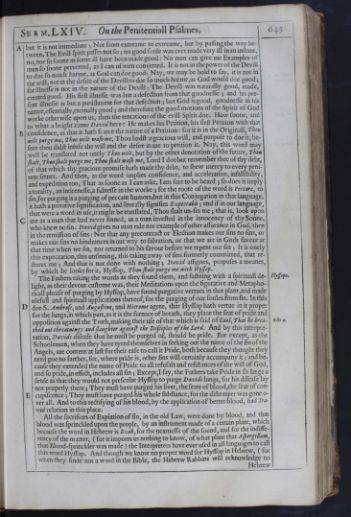 Serm. LXIV.
On the Penitentiall Psalmes.
645
but it is not immediate; Not from extreame to extreame, but by passing the way be-
Serm. LXIV.
On the Penitentiall Psalmes.
645
but it is not immediate; Not from extreame to extreame, but by passing the way be-tween. The Evill spirit passes not so; no good soule was ever made very ill in an instant,
no, nor so soone as some ill have been made good: No man can give me Examples of
men so soone perverted, as I can of men converted. It is not in the power of the Devill
to doe so much harme, as God can doe good; Nay, we may be bold to say, it is not in
the will, not in the desire of the Devill to doe so much harme, as God would doe good;
for illnesse is not in the nature of the Devill; The Devill was naturally good, made,
created good. His first illnesse was but a defection from that goodnesse; and his pre-
sent illnesse is but a punishment for that defection; but God is good, goodnesse in his
nature, essentially, eternally good; and therefore the good motions of the Spirit of God
worke otherwise upon us, then the tentations of the evill Spirit doe. How soone, and
to what a height came David here? He makes his Petition, his first Petition with that
confidence, as that it hath scarce the nature of a Petition: for it is in the Originall, Thou
wilt purge me, Thou wilt wash me, Thou hadst a gracious will, and purpose to doe it, be-
fore thou didst infuse the will and the desire in me to petition it. Nay, this word may
well be translated not onely Thou wilt, but by the other denotation of the future, Thou
shalt, Thou shalt purge me, Thou shalt wash me, Lord I doe but remember thee of thy debt,
of that which thy gracious promise hath made thy debt, to shew mercy to every peni-
tent sinner. And then, as the word implies confidence, and acceleration, infallibility,
and expedition too, That as soone as I can aske, I am sure to be heard; so does it imply
a totality, an intirenesse, a fulnesse in the worke; for the roote of the word is Peccare, to
sin, for purging is a purging of peccant humors; but in this Conjugation in that language,
it hath a privative signification, and literally signifies Expeccabis; and if in our language,
that were a word in use, it might be translated, Thou shalt un-sin me; that is, look upon
me as a man that had never sinned, as a man invested in the innocency of thy Sonne,
who knew no sin. David gives no man rule nor example of other assurance in God, then
in the remission of sins: Not that any precontract or Election makes our sins no sins, or
makes our sins no hindrances in our way to salvation, or that we are in Gods favour at
that time when we sin, nor returned to his favour before we repent our sin; It is onely
this expeccation, this unsinning, this taking away of sins formerly committed, that re-
stores me; And that is not done with nothing; David assignes, proposes a meanes,
by which he looks for it, Hyssop, Thou shalt purge me with Hyssop.
The Fathers taking the words as they found them, and fastning with a spirituall Hyssopo. de-
light, as their devout custome was, their Meditations upon the figurative and Metapho-
ricall phrase of purging by Hyssop, have found purgative vertues in that plant, and made
usefull and spirituall applications thereof, for the purging of our soules from sin. In this
doe S. Ambrose, and Augustine, and Hierome agree, that Hyssop hath vertue in it proper
for the lungs, in which part, as it is the furnace of breath, they place the seat of pride and
opposition against the Truth, making their use of that which is said of Saul,Acts 9. That he brea-
thed out threatnings and slaughter against the Disciples of the Lord. And by this interpre-
tation, Davids disease that he must be purged of, should be pride. But except, as the
Schoolemen, when they have tyred themselves in seeking out the name of the sin of the
Angels, are content at last for their ease to call it Pride, both because they thought they
need goe no farther, for, where pride is, other sins will certainly accompany it; and be-
cause they extended the name of Pride to all refusals and resistances of the will of God,
and so pride, in effect, includes all sin; Except, I say, the Fathers take Pride in so large a
sense as that they would not prescribe Hyssop to purge Davids lungs, for his disease lay
not properly there; They must have purged his liver, the seate of blood, the seat of con-
cupiscence; They must have purged his whole substance, for the distemper was gone o-
ver all. And to this rectifying of his blood, by the application of better blood, and Da-
vid relation in this place.
All the sacrifices of Expiation of sin, in the old Law, were done by blood, and that
blood was sprinckled upon the people, by an instrument made of a certain plant, which
because the word in Hebrew is Ezob, for the nearnesse of the sound, and for the indiffe-
rency of the matter, (for it imports us nothing to know, of what plant that Aspergillum,
that Blood-sprinckler was made) the Interpreters have ever used in all languages to call
this word Hyssop. And though we know no proper word for Hyssop in Hebrew, (for
when they finde not a word in the Bible, the Hebrew Rabbins will acknowledge no Hebrew
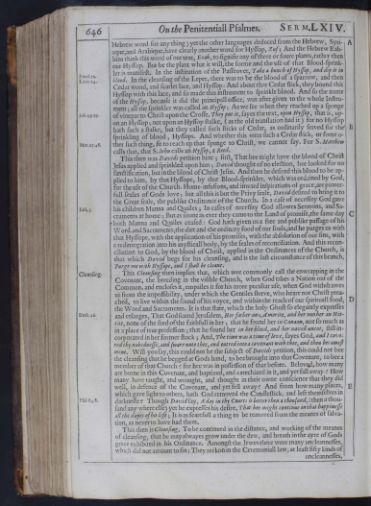 646
On the Penitentiall Psalmes.
Serm. LXIV.
Hebrew word for any thing) yet the other languages deduced from the Hebrew, Syri-
646
On the Penitentiall Psalmes.
Serm. LXIV.
Hebrew word for any thing) yet the other languages deduced from the Hebrew, Syri-aque, and Arabique, have clearly another word for Hyssop, Zus; And the Hebrew Rab-
bins think this word of our text, Ezob, to signifie any of three or foure plants, rather then
our Hyssop. But be the plant what it will, the forme and the use of that Blood-sprink-
ler is manifest. In the institution of the Passeover, Take a bunch of Hyssop, and dip it inExod. 12.
blood. In the cleansing of the Leper, there was to be the blood of a sparrow, and thenLevit. 14.
Cedar wood, and scarlet lace, and Hyssop: And about that Cedar stick, they bound this
Hyssop with this lace, and so made this instrument to sprinkle blood. And so the name
of the Hyssop, because it did the principall office, was after given to the whole Instru-
ment; all the sprinkler was called an Hyssop; As we see when they reached up a sponge
of vinegar to Christ upon the Crosse, Ioh. 19.29. They put it, sayes the text, upon Hyssop, that is, up-
on an Hyssop; not upon an Hyssop stalke, (as the old translation had it) for no Hyssop
hath such a stalke, but they called such sticks of Cedar, as ordinarily served for the
sprinkling of blood, Hyssops. And whether this were such a Cedar stick, or some o-
ther such thing, Mat. 27.48. fit to reach up that spunge to Christ, we cannot say. For S. Matthew
calls that, that S. Iohn calls an Hyssop, a Reed.
This then was Davids petition here; first, That hee might have the blood of Christ
Jesus applied and sprinkled upon him; David thought of no election, hee looked for no
sanctification, but in the blood of Christ Jesus. And then he desired this blood to be ap-
plied to him, by that Hyssope, by that Blood-sprinkler, which was ordained by God,
for the use of the Church. Home-infusions, and inward inspirations of grace, are power-
full seales of Gods love; but all this is but the Privy seale, David desired to bring it to
the Great seale, the publike Ordinance of the Church. In a case of necessity God gave
his children Manna and Quailes;Iosh. 5. In cases of necessity God allowes Sermons, and Sa-
craments at home; But as soone as ever they came to the Land of promise, the same day
both Manna and Quailes ceased: God hath given us a free and publike passage of his
Word, and Sacraments, the diet and the ordinary food of our souls, and he purges us with
that Hyssope, with the application of his promises, with the absolution of our sins, with
a redintegration into his mysticall body, by the seales of reconciliation. And this recon-
ciliation to God, by the blood of Christ, applied in the Ordinances of the Church, is
that which David begs for his cleansing, and is the last circumstance of this branch,
Purge me with Hyssope, and I shall be cleane.
This Cleansing then implies that, Cleansing. which wee commonly call the enwrapping in the
Covenant, the breeding in the visible Church, when God takes a Nation out of the
Common, and encloses it, empailes it for his more peculiar use, when God withdrawes
us from the impossibility, under which the Gentiles sterve, who heare not Christ prea-
ched, to live within the sound of his voyce, and within the reach of our spirituall food,
the Word and Sacraments. It is that state, which the holy Ghost so elegantly expresses
and enlarges, Ezek. 16. That God found Jerusalem, Her father an Amorite, and her mother an Hit-
tite, none of the seed of the faithfull in her; that he found her in Canaan, not so much as
in a place of true profession; that he found her in her blood, and her navell uncut, still in-
corporated in her former stock; And, The time was a time of love, sayes God, and I cove-
red thy nakednesse, and sware unto thee, and entred into a covenant with thee, and thou becamest
mine. Will you say, this could not be the subject of Davids petition, this could not bee
the cleansing that he begged at Gods hand, to bee brought into that Covenant, to bee a
member of that Church? for hee was in possession of that before. Beloved, how many
are borne in this Covenant, and baptized, and catechized in it, and yet fall away? How
many have taught, and wrought, and thought in their owne conscience that they did
well, in defence of the Covenant, and yet fell away? And from how many places,
which gave light to others, hath God removed the Candlestick, and left themselves in
darknesse?Psal. 84.8. Though David say, A day in thy Courts is better then a thousand, (then a thou-
sand any where else) yet he expresses his desire, That hee might continue in that happinesse
all the dayes of his life; It is as fearefull a thing to be removed from the meanes of salva-
tion, as never to have had them.
This then is Cleansing, To be continued in the distance, and working of the meanes
of cleansing, that he may alwayes grow under the dew, and breath in the ayre of Gods
grace exhibited in his Ordinance. Amongst the Jewes there were many uncleannesses,
which did not amount to sin: They reckon in the Ceremoniall law, at least fifty kinds of uncleannesses,
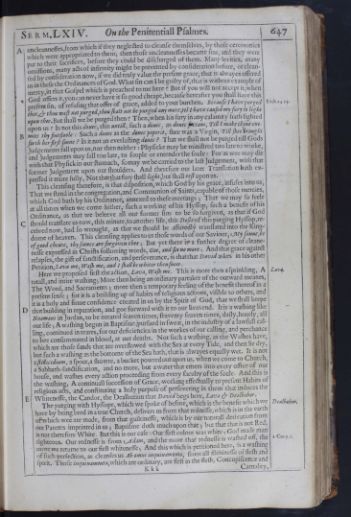 Serm. LXIV.
On the Penitentiall Psalmes.
647
uncleannesses, from which if they neglected to cleanse themselves, by those ceremonies
Serm. LXIV.
On the Penitentiall Psalmes.
647
uncleannesses, from which if they neglected to cleanse themselves, by those ceremonies
which were appropriated to them, then those uncleannesses became sins, and they were
put to their sacrifices, before they could be discharged of them. Many levities, many
omissions, many acts of infirmity might be prevented by consideration before, or clean-
sed by consideration now, if we did truly value the present grace, that is alwayes offered
us in these the Ordinances of God. What sin can I be guilty of, that is without example of
mercy, in that Gospel which is preached to me here? But if you will not accept it, when
God offers it, you can never have it so good cheape, because hereafter you shall have this
present sin, of refusing that offer of grace, added to your burthen.Ezek. 24.13. Because I have purged
thee, & thou wast not purged, thou shalt not be purged any more, til I have caused my fury to light
upon thee. But shall we be purged then? Then, when his fury in any calamity hath lighted
upon us? Is not this donec, this untill, such a donec, as donec faciam, Till I make thine ene-
mies thy footstoole: Such a donec as the donec peperit, shee was a Virgin, Till shee brought
forth her first sonne? Is it not an everlasting donec? That we shall not be purged till Gods
Judgements fall upon us, nor then neither: Physicke may be ministred too late to worke,
and Judgements may fall too late, to souple or entender the soule: For as wee may die
with that Physick in our stomach, so may we be carried to the last Judgement, with that
former Judgement upon our shoulders. And therefore our later Translation hath ex-
pressed it more fully, Not that that fury shall light, but shall rest upon us.
This cleansing therefore, is that disposition, which God by his grace, infuses into us,
That we stand in the congregation, and Communion of Saints, capable of those mercies,
which God hath by his Ordinance, annexed to these meetings; That we may so feele
at all times when we come hither, such a working of his Hyssop, such a benefit of his
Ordinance, as that we beleeve all our former sins to be so forgiven, as that if God
should translate us now, this minute, to another life, this Dosis of this purging Hyssop, re-
ceived now, had so wrought, as that we should be assuredly translated into the King-
dome of heaven. This cleansing applies to us those words of our Saviour, My sonne, be
of good cheare, thy sinnes are forgiven thee; But yet there is a farther degree of cleane-
nesse expressed in Christs following words, Goe, and sin no more; And that grace against
relapses, the gift of sanctification, and perseverance, is that that David askes in his other
Petition, Lava me, Wash me, and I shall be whiter then snow.
Here we proposed first the action, Lava, Wash me. This is more then a sprinkling, Lava. A
totall, and intire washing; More then being an ordinary partaker of the outward meanes,
The Word, and Sacraments; more then a temporary feeling of the benefit thereof in a
present sense; for it is a building up of habits of religious actions, visible to others, and
it is a holy and firme confidence created in us by the Spirit of God, that we shall keepe
that building in reparation, and goe forward with it to our lives end. It is a washing like
Naamans in Jordan, to be iterated seaven times, seaventy seaven times, daily, hourly, all
our life; A washing begun in Baptisme, pursued in sweat, in the industry of a lawfull cal-
ling, continued in teares, for our deficiencies in the workes of our calling, and perchance
to bee consummated in blood, at our deaths. Not such a washing, as the Washes have,
which are those sands that are overflowed with the Sea at every Tide, and then lie dry,
but such a washing as the bottome of the Sea hath, that is alwayes equally wet. It is not
a stillicidium, a spout, a showre, a bucket powred out upon us, when we come to Church,
a Sabbath-sanctification, and no more, but a water that enters into every office of our
house, and washes every action proceeding from every faculty of the soule. And this is
the washing, A continuall succession of Grace, working effectually to present Habits of
religious acts, and constituting a holy purpose of persevering in them that induces the
Whitenesse, the Candor, the Dealbation that David begs here, Lava & Dealbabor.
The purging with Hyssope, which we spoke of before, Dealbabor. which is the benefit which we
have by being bred in a true Church, delivers us from that rednesse, which is in the earth
of which wee are made, from that guiltinesse, which is by our naturall derivation from
our Parents imprinted in us; Baptisme doth much upon that; but that that is not Red,
is not therefore White. But this is our case: Our first colour was white; God made man
righteous. Our rednesse is from Adam, and the more that rednesse is washed off, 2 Cor. 7.1. the
more we returne to our first whitenesse; And this which is petitioned here, is a washing
of such perfection, as cleanses us Ab omni inquinamento, from all filthinesse of flesh and
spirit. Those inquinamenta, which are ordinary, are first in the flesh, Concupiscence and Kkk Carnality,
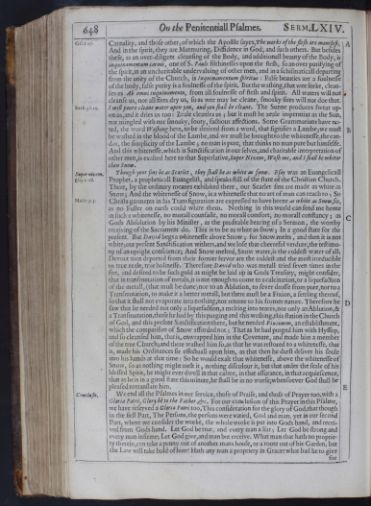 648
On the Penitentiall Psalmes.
Serm. LXIV.
Carnality, Gal. 5.19. and those other, of which the Apostle sayes, The works of the flesh are manifest;
648
On the Penitentiall Psalmes.
Serm. LXIV.
Carnality, Gal. 5.19. and those other, of which the Apostle sayes, The works of the flesh are manifest;
And in the spirit, they are Murmuring, Diffidence in God, and such others. But besides
these, as an over-diligent cleansing of the Body, and additionall beauty of the Body, is
inquinamentum carnis, one of S. Pauls filthinesses upon the flesh, so an over purifying of
the spirit, in an uncharitable undervaluing of other men, and in a schismaticall departing
from the unity of the Church, is Inquinamentum spiritus: False beauties are a foulnesse
of the body, false purity is a foulnesse of the spirit. But the washing, that wee seeke, clean-
ses us Ab omni inquinamento, from all foulnesse of flesh and spirit. All waters will not
cleanse us, nor all fires dry us, so as wee may be cleane, smoaky fires will not doe that.
I will poure cleane water upon you,Ezek. 36.25. and you shall be cleane. The Sunne produces sweat up-
on us, and it dries us too: Zeale cleanses us; but it must be zeale impermixt as the Sun,
not mingled with our smoaky, sooty, factious affections. Some Grammarians have no-
ted, the word Washing here, to be derived from a word, that signifies a Lambe; we must
be washed in the blood of the Lambe, and we must be brought to the whitenesse, the can-
dor, the simplicity of the Lambe; no man is pure, that thinks no man pure but himselfe.
And this whitenesse, which is Sanctification in our selves, and charitable interpretation of
other men, is exalted here to that Superlative, Super Nivem, Wash me, and I shall be whiter
then Snow.
Though your sins be as Scarlet,Super nivem. they shall be as white as snow. Esay was an Euangelicall
Prophet, a propheticall Euangelist, and speaks still of the state of the Christian Church. Esay 1.18.
There, by the ordinary meanes exhibited there, our Scarlet sins are made as white as
Snow; And the whitenesse of Snow, is a whitenesse that no art of man can reach to; So
Christs garments in his Transfiguration are expressed to have beene as white as Snow, Marke 9.3. so,
as no Fuller on earth could white them. Nothing in this world can send me home
in such a whitenesse, no morall counsaile, no morall comfort, no morall constancy; as
Gods Absolution by his Minister, as the profitable hearing of a Sermon, the worthy
receiving of the Sacrament do. This is to be as white as snow; In a good state for the
present. But David begs a whitenesse above Snow; for Snow melts, and then it is not
white; our present Sanctification withers, and we lose that cheereful verdure, the testimo-
ny of an upright conscience; And Snow melted, Snow water, is the coldest water of all;
Devout men departed from their former fervor are the coldest and the most irreducible
to true zeale, true holinesse. Therefore David who was metall tried seven times in the
fire, and desired to be such gold as might be laid up in Gods Treasury, might consider,
that in transmutation of metals, it is not enough to come to a calcination, or a liquefaction
of the metall, (that must be done) nor to an Ablution, to sever drosse from pure, nor to a
Transmutation, to make it a better metall, but there must be a Fixion, a settling thereof,
so that it shall not evaporate into nothing, nor returne to his former nature. Therefore he
saw that he needed not only a liquefaction, a melting into teares, nor only an Ablution, &
a Transmutation, those he had by this purging and this washing, this station in the Church
of God, and this present Sanctification there, but he needed Fixionem, an establishment,
which the comparison of Snow afforded not; That as he had purged him with Hyssop,
and so cleansed him, that is, enwrapped him in the Covenant, and made him a member
of the true Church; and there washed him so, as that he was restored to a whitenesse, that
is, made his Ordinances so effectuall upon him, as that then he durst deliver his soule
into his hands at that time: So he would exalt that whitenesse, above the whitenesse of
Snow, so as nothing might melt it, nothing discolour it, but that under the seale of his
blessed Spirit, he might ever dwell in that calme, in that assurance, in that acquiescence,
that as he is in a good state this minute, he shall be in no worse, whensoever God shall be
pleased to translate him.
We end all the Psalmes in our service, Conclusio. those of Praise, and those of Prayer too, with a
Gloria Patri, Glory be to the Father, &c. For our conclusion of this Prayer in this Psalme,
we have reserved a Gloria Patri too, This consideration for the glory of God, that though
in the first Part, The Persons, the persons were varied, God and man, yet in our second
Part, where we confider the worke, the whole worke is put into Gods hand, and recei-
ved from Gods hand. Let God be true, and every man a liar; Let God be strong and
every man infirme; Let God give, and man but receive. What man that hath no proprie-
ty therein, can take a penny out of another mans house, or a roote out of his Garden, but
the Law will take hold of him? Hath any man a propriety in Grace? what had he to give for
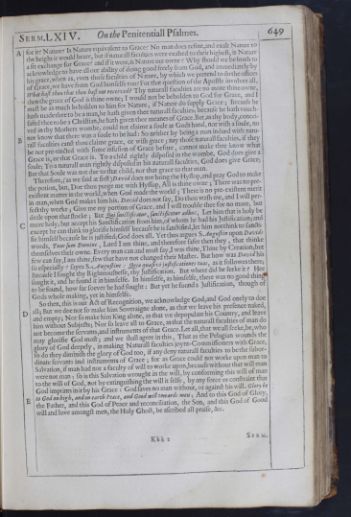 Serm. LXIV.
On the Penitentiall Psalmes.
649
for it? Nature? Is Nature equivalent to Grace? No man does refine, and exalt Nature to
Serm. LXIV.
On the Penitentiall Psalmes.
649
for it? Nature? Is Nature equivalent to Grace? No man does refine, and exalt Nature to
the height it would beare, but if naturall faculties were exalted to their highest, is Nature
a fit exchange for Grace? and if it were, is Nature our owne? Why should we be loath to
acknowledge to have all our ability of doing good freely from God, and immediately by
his grace, when as, even those faculties of Nature, by which we pretend to do the offices
of Grace, we have from God himselfe too? For that question of the Apostle involves all,
What hast thou that thou hast not received? Thy naturall faculties are no more thine owne,
then the grace of God is thine owne; I would not be beholden to God for Grace, and I
must be as much beholden to him for Nature, if Nature do supply Grace; Because he
hath made thee to be a man, he hath given thee naturall faculties; because he hath vouch-
safed thee to be a Christian, he hath given thee meanes of Grace. But, as thy body, concei-
ved in thy Mothers wombe, could not claime a soule at Gods hand, nor wish a soule, no
nor know that there was a soule to be had: So neither by being a man indued with natu-
rall faculties canst thou claime grace, or wish grace; nay those naturall faculties, if they
be not pre-tincted with some infusion of Grace before, cannot make thee know what
Grace is, or that Grace is. To a child rightly disposed in the wombe, God does give a
soule; To a naturall man rightly disposed in his naturall faculties, God does give Grace;
But that Soule was not due to that child, nor that grace to that man.
Therefore, (as we said at first) David does not bring the Hyssop, and pray God to make
the potion, but, Doe thou purge me with Hyssop, All is thine owne; There was no pre-
existent matter in the world, when God made the world; There is no pre-existent merit
in man, when God makes him his. David does not say, Do thou wash me, and I will per-
fect thy worke; Give me my portion of Grace, and I will trouble thee for no more, but
deale upon that stocke; But Qui sanctificatur, sanctificetur adhuc, Let him that is holy be
more holy, but accept his Sanctification from him, of whom he had his Justification; and
except he can think to glorifie himself because he is sanctified, let him not think to sancti-
fie himself because he is justified; God does all. Yet thus argues S. Augustin upon Davids
words, Tuus sum Domine, Lord I am thine, and therefore safer then they, that thinke
themselves their owne. Every man can and must say, I was thine, Thine by Creation; but
few can say, I am thine, few that have not changed their Master. But how was David his
so especially? sayes S. Augustine: Quia quæsivi justificationes tuas, as it followes there;
Because I sought thy Righteousnesse, thy Justification. But where did he seeke it? Hee
sought it, and he found it in himselfe. In himselfe, as himselfe, there was no good thing
to be found, how far soever he had sought: But yet he found a Justification, though of
Gods whole making, yet in himselfe.
So then, this is our Act of Recognition, we acknowledge God, and God onely to doe
all; But we doe not so make him Soveraigne alone, as that we leave his presence naked,
and empty; Nor so make him King alone, as that we depopulate his Country, and leave
him without Subjects; Nor so leave all to Grace, as that the naturall faculties of man do
not become the servants, and instruments of that Grace. Let all, that we all seeke, be, who
may glorifie God most; and we shall agree in this, That as the Pelagian wounds the
glory of God deepely, in making Naturall faculties joynt-Commissioners with Grace,
so do they diminish the glory of God too, if any deny naturall faculties to be the subor-
dinate servants and instruments of Grace; for as Grace could not worke upon man to
Salvation, if man had not a faculty of will to worke upon, because without that will man
were not man; so is this Salvation wrought in the will, by conforming this will of man
to the will of God, not by extinguishing the will it selfe, by any force or constraint that
God imprints in it by his Grace: God saves no man without, or against his will. Glory be
to God on high, and on earth Peace, and Good will towards men; And to this God of Glory,
the Father, and this God of Peace and reconciliation, the Son, and this God of Good
will and love amongst men, the Holy Ghost, be ascribed all praise, &c. Kkk2 Serm.
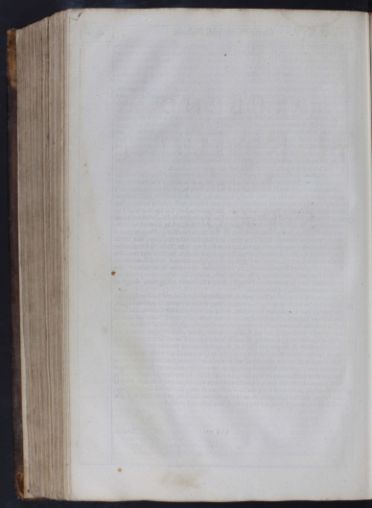
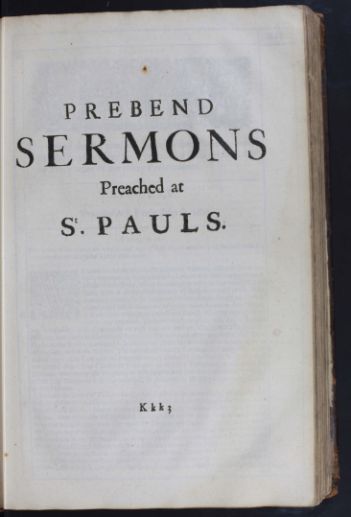
PREBEND
SERMONS
Preached at
St. PAULS. Kkk3
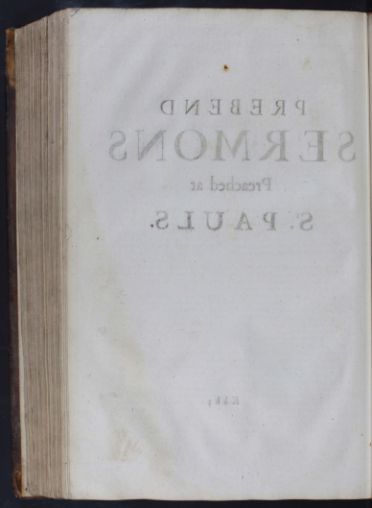
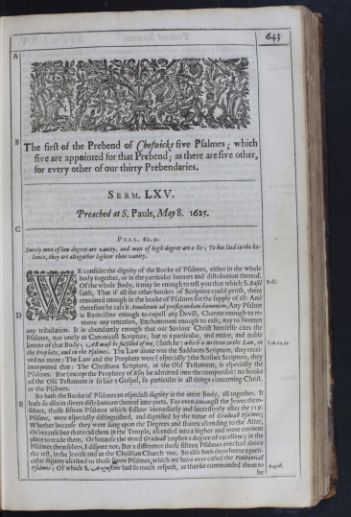 643
643
The first of the Prebend of Cheswicks five Psalmes; which
five are appointed for that Prebend; as there are five other,
for every other of our thirty Prebendaries.
Serm. LXV.
Preached at S. Pauls, May 8. 1625.
Psal. 62.9.
Surely men of low degree are vanity, and men of high degree are a lie; To bee laid in the ba-
lance, they are altogether lighter then vanity.
WEWe consider the dignity of the Booke of Psalmes, either in the whole
body together, or in the particular limmes and distribution thereof.
Of the whole Body, Basil. it may be enough to tell you that which S. Basil
saith, That if all the other bookes of Scripture could perish, there
remained enough in the booke of Psalmes for the supply of all: And
therefore he cals it Amuletum ad profligandum dæmonem; Any Psalme
is Exorcisme enough to expell any Devill, Charme enough to re-
move any tentation, Enchantment enough to ease, nay to sweeten
any tribulation. It is abundantly enough that our Saviour Christ himselfe cites the
Psalmes, not onely as Canonicall Scripture, but as a particular, and entire, and noble
limme of that Body; All must be fulfilled of me, (saith he) which is written in the Law, Luk. 24.44. in
the Prophets, and in the Psalmes. The Law alone was the Sadduces Scripture, they recei-
ved no more: The Law and the Prophets were (especially) the Scribes Scripture, they
interpreted that: The Christians Scripture, in the Old Testament, is especially the
Psalmes. For (except the Prophecy of Esay be admitted into the comparison) no booke
of the Old Testament is so like a Gospel, so particular in all things concerning Christ,
as the Psalmes.
So hath the Booke of Psalmes an especiall dignity in the intire Body, all together. It
hath so also in divers distributions thereof into parts. For even amongst the Jewes them-
selves, those fifteen Psalmes which follow immediatly and successively after the 119.
Psalme, were especially distinguished, and dignified by the name of Graduall Psalmes;
Whether because they were sung upon the Degrees and staires ascending to the Altar,
Or because hee that read them in the Temple, ascended into a higher and more eminent
place to reade them, Or because the word Graduall implies a degree of excellency in the
Psalmes themselves, I dispute not; But a difference those fifteen Psalmes ever had above
the rest, in the Jewish and in the Christian Church too. So also hath there beene a parti-
cular dignity ascribed to those seven Psalmes, which we have ever called the Penitentiall
Psalmes; Of which S. Augustine had so much respect, August. as that he commanded them to be
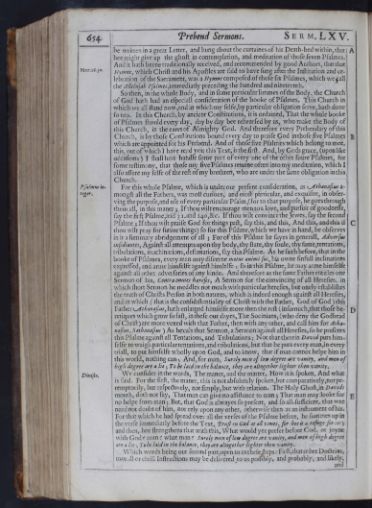 654
Prebend Sermons.
Serm. LXV.
be written in a great Letter, and hung about the curtaines of his Death-bed within, that
654
Prebend Sermons.
Serm. LXV.
be written in a great Letter, and hung about the curtaines of his Death-bed within, that
hee might give up the ghost in contemplation, and meditation of those seven Psalmes.
And it hath beene traditionally received, and recommended by good Authors, that that
Hymne, Matt. 26.30. which Christ and his Apostles are said to have sung after the Institution and ce-
lebration of the Sacrament, was a Hymne composed of those six Psalmes, which we call
the Allelujah Psalmes, immediatly preceding the hundred and nineteenth.
So then, in the whole Body, and in some particular limmes of the Body, the Church
of God hath had an especiall consideration of the booke of Psalmes. This Church in
which we all stand now, and in which my selfe, by particular obligation serve, hath done
so too. In this Church, by ancient Constitutions, it is ordained, That the whole booke
of Psalmes should every day, day by day bee rehearsed by us, who make the Body of
this Church, in the eares of Almighty God. And therefore every Prebendary of this
Church, is by those Constitutions bound every day to praise God in those five Psalmes
which are appointed for his Prebend. And of those five Psalmes which belong to mee,
this, out of which I have read you this Text, is the first. And, by Gods grace, (upon like
occasions) I shall here handle some part of every one of the other foure Psalmes, for
some testimony, that those my five Psalmes returne often into my meditation, which I
also assure my selfe of the rest of my brethren, who are under the same obligation in this
Church.
For this whole Psalme, Psalmus in-
teger. which is under our present consideration, as Athanasius a-
mongst all the Fathers, was most curious, and most particular, and exquisite, in obser-
ving the purpose, and use of every particular Psalm, (for to that purpose, he goes through
them all, in this maner; If thou wilt encourage men to a love, and pursuit of goodnesse,
say the first Psalme, and 31. and 140, &c. If thou wilt convince the Jewes, say the second
Psalme; If thou wilt praise God for things past, say this, and this, And this, and this if
thou wilt pray for future things) so for this Psalme, which we have in hand, he observes
in it a summary abridgement of all; For of this Psalme he sayes in generall, Adversus
insidiantes, Against all attempts upon thy body, thy state, thy soule, thy fame, tentations,
tribulations, machinations, defamations, say this Psalme. As he saith before, that in the
booke of Psalmes, every man may discerne motus animi sui, his owne finfull inclinations
expressed, and arme himselfe against himselfe; so in this Psalme, he may arme himselfe
against all other adversaries of any kinde. And therefore as the same Father entitles one
Sermon of his, Contra omnes hæreses, A Sermon for the convincing of all Heresies, in
which short Sermon he meddles not much with particular heresies, but onely establishes
the truth of Christs Person in both natures, which is indeed enough against all Heresies,
and in which (that is the consubstantiality of Christ with the Father, God of God) this
Father Athanasius, hath enlarged himselfe more then the rest (insomuch, that those he-
retiques which grow so fast, in these our dayes, The Socinians, (who deny the Godhead
of Christ) are more vexed with that Father, then with any other, and call him for Atha-
nasius, Sathanasius) As he cals that Sermon, a Sermon against all Heresies, so he presents
this Psalme against all Tentations, and Tribulations; Not that therein David puts him-
selfe to waigh particular tentations, and tribulations, but that he puts every man, in every
triall, to put himselfe wholly upon God, and to know, that if man cannot helpe him in
this world, nothing can; And, for man, Surely men of low degree are vanity, and men of
high degree are a lie; To be laid in the balance, they are altogether lighter then vanity.
We consider in the words, Divisio. The maner, and the matter, How it is spoken, And what
is said. For the first, the maner, this is not absolutely spoken, but comparatively, not pe-
remptorily, but respectively, not simply, but with relation. The Holy Ghost, in Davids
mouth, doth not say, That man can give no assistance to man; That man may looke for
no helpe from man; But, that God is alwayes so present, and so all-sufficient, that wee
need not doubt of him, nor rely upon any other, otherwise then as an instrument of his.
For that which he had spread over all the verses of the Psalme before, he summes up in
the verse immediatly before the Text, Trust in God at all times, for hee is a refuge for us;
and then, hee strengthens that with this, What would yee prefer before God, or joyne
with God? man? what man? Surely men of low degree are vanity, and men of high degree
are a lie; To be laid in the balance, they are altogether lighter then vanity.
Which words being our second part, open to us these steps: First, that other Doctrins,
morall or civill Instructions may be delivered to us possibly, and probably, and likely, and
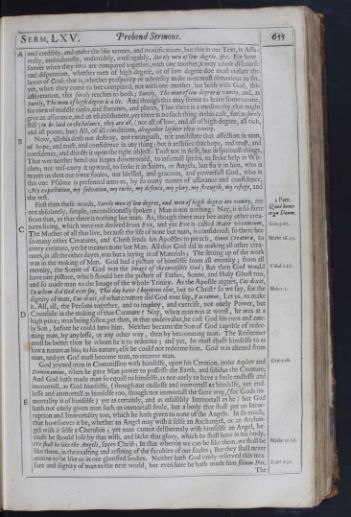 Serm. LXV.
Prebend Sermons.
655
and credibly, and under the like termes, and modifications, but this in our Text, is Assu-
Serm. LXV.
Prebend Sermons.
655
and credibly, and under the like termes, and modifications, but this in our Text, is Assu-redly, undoubtedly, undeniably, irrefragably, Surely men of low degree, &c. For how-
soever when they two are compared together, with one another, it may admit discourse
and disputation, whether men of high degree, or of low degree doe most violate the
lawes of God; that is, whether prosperity or adversity make men most obnoxious to sin,
yet, when they come to bee compared, not with one another, but both with God, this
asseveration, this surely reaches to both; Surely, The man of low degree is vanity, and, as
Surely, The man of high degree is a lie. And though this may seeme to leave some roome,
for men of middle ranks, and fortunes, and places, That there is a mediocrity, that might
give an assurance, and an establishment, yet there is no such thing in this case, for (as surely
still) to be laid in the balance, they are all, (not all of low, and all of high degree, all rich,
and all poore, but) All, of all conditions, altogether lighter then vanity.
Now, all this doth not destroy, not extinguish, not annihilate that affection in man,
of hope, and trust, and confidence in any thing; but it rectifies that hope, and trust, and
confidence, and directs it upon the right object: Trust not in flesh, but in spirituall things,
That wee neither bend our hopes downeward, to infernall spirits, to seeke help in Wit-
ches; nor mis-carry it upward, to seeke it in Saints, or Angels, but fix it in him, who is
nearer us then our owne soules, our blessed, and gracious, and powerfull God, who in
this one Psalme is presented unto us, by so many names of assurance and confidence,
My expectation, my salvation, my rocke, my defence, my glory, my strength, my refuge, and
the rest.
First then these words, Surely men of low degree, and men of high degree are vanity, 1 Part. are
not absolutely, simple, unconditionally spoken; Man is not nothing: Nay, it is so farre Quid homo
erga Deum.
from that, as that there is nothing but man. As, though there may bee many other crea-
tures living, which were not derived from Eve, and yet Eve is called Mater viventium, Gen. 3.20.
The Mother of all that live, because the life of none but man, is considered; so there bee
so many other Creatures, and Christ sends his Apostles to preach, Omni Creaturæ, Marke 16.15. to
every creature, yet he meanes none but Man. All that God did in making all other crea-
tures, in all the other dayes, was but a laying in of Materials; The setting up of the work
was in the making of Man. God had a picture of himselfe from all eternity; from all
eternity, the Sonne of God was the Image of the invisible God;Colos. 1.15. But then God would
have one picture, which should bee the picture of Father, Sonne, and Holy Ghost too,
and so made man to the Image of the whole Trinity. As the Apostle argues, Cui dixit,
To whom did God ever say, This day have I begotten thee, but to Christ? so we say, Heb. 1.5. for the
dignity of man, Cui dixit, of what creature did God ever say, Faciamus, Let us, us make
it, All, all, the Persons together, and to imploy, and exercise, not onely Power, but
Counsaile in the making of that Creature? Nay, when man was at worst, he was at a
high price; man being fallen, yet then, in that undervalue, he cost God his own and one-
ly Son, before he could have him. Neither became the Son of God capable of redee-
ming man, by any lesse, or any other way, then by becomming man. The Redeemer
must be better then he whom he is to redeeme; and yet, he must abase himselfe to as
low a nature as his; to his nature; else he could not redeeme him. God was aliened from
man, and yet God must become man, to recover man.
God joyned man in Commission with himselfe, upon his Creation, Gen. 1.28. in the Replete and
Dominamini, when he gave Man power to possesse the Earth, and subdue the Creature;
And God hath made man so equall to himselfe, as not onely to have a soule endlesse and
immortall, as God himselfe, (though not endlesse and immortall as himselfe, yet end-
lesse and immortall as himselfe too, though not immortall the same way, (for Gods im-
mortality is of himselfe) yet as certainly, and as infallibly Immortall as he) but God
hath not onely given man such an immortall soule, but a body that shall put on Incor-
ruption and Immortality too, which he hath given to none of the Angels. In so much,
that howsoever it be, whether an Angel may wish it selfe an Archangel, or an Archan-
gel wish it selfe a Cherubin; yet man cannot deliberately wish himselfe an Angel, be-
cause he should lose by that wish, and lacke that glory, which he shall have in his body.
We shall be like the Angels, sayes Christ; In that wherein we can be like them, Marke 12.25. we shall be
like them, in the exalting and refining of the faculties of our soules; But they shall never
attaine to be like us in our glorified bodies. Neither hath God onely reserved this trea-
sure and dignity of man to the next world, Luke 6.35. but even here he hath made him filium Dei, The
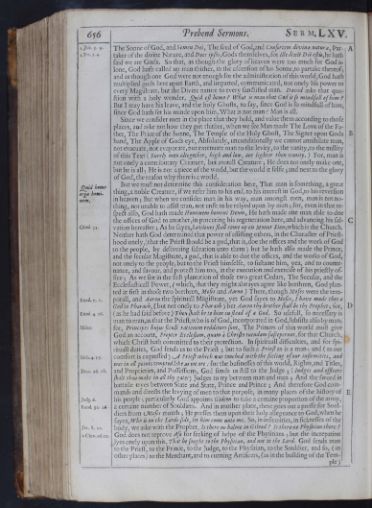 656
Prebend Sermons.
Serm. LXV.
The Sonne of God, 1 Joh. 3.9. and Semen Dei, The seed of God, and Consortem divinæ naturæ, 2 Pet. 1.4.
Par-
656
Prebend Sermons.
Serm. LXV.
The Sonne of God, 1 Joh. 3.9. and Semen Dei, The seed of God, and Consortem divinæ naturæ, 2 Pet. 1.4.
Par-taker of the divine Nature, and Deos ipsos, Gods themselves, for Ille dixit Dii estis, he hath
said we are Gods. So that, as though the glory of heaven were too much for God a-
lone, God hath called up man thither, in the ascension of his Sonne, to partake thereof;
and as though one God were not enough for the administration of this world, God hath
multiplied gods here upon Earth, and imparted, communicated, not onely his power to
every Magistrate, but the Divine nature to every sanctified man. David asks that que-
stion with a holy wonder, Quid est homo? What is man that God is so mindfull of him?
But I may have his leave, and the holy Ghosts, to say, since God is so mindfull of him,
since God hath set his minde upon him, What is not man? Man is all.
Since we consider men in the place that they hold, and value them according to those
places, and aske not how they got thither, when we see Man made The Love of the Fa-
ther, The Price of the Sonne, The Temple of the Holy Ghost, The Signet upon Gods
hand, The Apple of Gods eye, Absolutely, unconditionally we cannot annihilate man,
not evacuate, not evaporate, not extenuate man to the levity, to the vanity, to the nullity
of this Text (Surely men altogether, high and low, are lighter then vanity.) For, man is
not onely a contributary Creature, but a totall Creature; He does not onely make one,
but he is all; He is not a piece of the world, but the world it selfe; and next to the glory
of God, the reason why there is a world.
But we must not determine this consideration here, That man is something, a great Quid homo
erga homi-
nem.
thing, a noble Creature, if we refer him to his end, to his interest in God, to his reversion
in heaven; But when we consider man in his way, man amongst men, man is not no-
thing, not unable to assist man, not unfit to be relyed upon by man; for, even in that re-
spect also, God hath made Hominem homini Deum, He hath made one man able to doe
the offices of God to another, in procuring his regeneration here, and advancing his sal-
vation hereafter;Obad. 21. As he sayes, Saviours shall come up on Mount Sion; which is the Church.
Neither hath God determined that power of assisting others, in the Character of Priest-
hood onely, (that the Priest should be a god, that is, doe the offices and the work of God
to the people, by delivering salvation unto them) but he hath also made the Prince,
and the secular Magistrate, a god, that is able to doe the offices, and the works of God,
not onely to the people, but to the Priest himselfe, to sustaine him, yea, and to counte-
nance, and favour, and protect him too, in the execution and exercise of his priestly of-
fice; As we see in the first plantation of those two great Cedars, The Secular, and the
Ecclesiasticall Power, (which, that they might alwayes agree like brethren, God plan-
ted at first in those two brethren, Moses and Aaron) There, though Moses were the tem-
porall, and Aaron the spirituall Magistrate, Exod. 7.1. yet God sayes to Moses, I have made thee a
God to Pharaoh, (but not onely to Pharaoh) but Aaron thy brother shall be thy Prophet; for,
(as he had said before) Thou shalt be to him in stead of a God.Exod. 4.16. So usefull, so necessary is
man to man, as that the Priest, who is of God, incorporated in God, subsists also by man;
for, Isidor. Principes hujus seculi rationem reddituri sunt, The Princes of this world must give
God an account, Propter Ecclesiam, quam à Christo tuendam susceperunt, for that Church,
which Christ hath committed to their protection. In spirituall difficulties, and for spi-
rituall duties, God sends us to the Priest; but to such a Priest as is a man; and (as our
comfort is expressed) A Priest which was touched with the feeling of our infirmities,Heb. 4.15. and
was in all points tempted like as we are: for the businesses of this world, Rights, and Titles,
and Proprieties, Deut. 16.18. and Possessions, God sends us still to the Judge; (Iudges and officers
shalt thou make in all thy gates) Judges to try between man and man; And the sword in
battaile tryes between State and State, Prince and Prince; And therefore God com-
mands and directs the levying of men to that purpose, in many places of the history of
his people;Judg. 6. particularly God appoints Gideon to take a certaine proportion of the army,
a certaine number of Souldiers.Exod. 32.26. And in another place, there goes out a presse for Soul-
diers from Moses mouth; He presses them upon their holy allegeance to God, when he
sayes, Who is on the Lords side, let him come unto me. So, in infirmities, in sicknesses of the
body, Jer. 8.22. we aske with the Prophet, Is there no balme in Gilead? Is there no Physitian there?
God does not reprove Asa for seeking of helpe of the Physitians;2 Chro. 16.12. but the increpation
lyes onely upon this, That he sought to the Physitian, and not to the Lord. God sends man
to the Priest, to the Prince, to the Judge, to the Physitian, to the Souldier, and so, (in
other places) to the Merchant, and to cunning Artificers, (as in the building of the Tem-
ple)
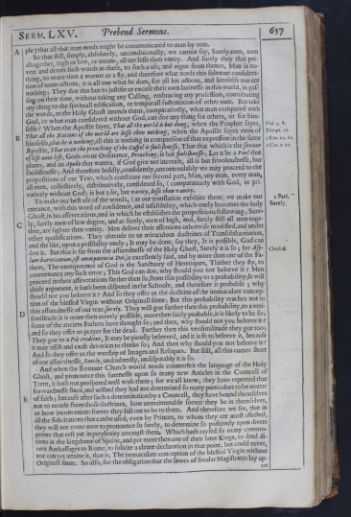 Serm. LXV.
Prebend Sermons.
657
ple) that all that man needs might be communicated to man by man.
Serm. LXV.
Prebend Sermons.
657
ple) that all that man needs might be communicated to man by man.
So that still, simply, absolutely, unconditionally, we cannot say, Surely men, men
altogether, high or low, or meane, all are lesse then vanity. And surely they that per-
vert and detort such words as these, to such a use, and argue from thence, Man is no-
thing, no more then a worme or a fly, and therefore what needs this solemne considera-
tion of mans actions, it is all one what he does, for all his actions, and himselfe too are
nothing; They doe this but to justifie or excuse their own lazinesse in this world, in pas-
sing on their time, without taking any Calling, embracing any profession, contributing
any thing to the spirituall edification, or temporall sustentation of other men. But take
the words, as the Holy Ghost intends them, comparatively, what man compared with
God, or what man considered without God, can doe any thing for others, or for him-
selfe? When the Apostle sayes, That all the world is but dung, when the Prophet sayes, Phil. 3.8.
That all the Nations of the world are lesse then nothing, when the Apostle sayes even of Esay 40.15.
himselfe, that he is nothing, all this is nothing in comparison of that expression in the same 2 Cor. 12.11.
Apostle, That even the preaching of the Gospel is foolishnesse, 1 Cor. 1.21. That that which is the savour
of life unto life, Gods owne Ordinance, Preaching, is but foolishnesse; Let it be a Paul that
plants, and an Apollo that waters, if God give not increase, all is but frivolousnesse, but
foolishnesse; And therefore boldly, confidently, uncontroulably we may proceed to the
propositions of our Text, which constitute our second part, Man, any man, every man,
all men, collectively, distributively, considered so, (comparatiuely with God, or pri-
vatively without God) is but a lie, but vanity, lesse then vanity.
To make our best use of the words, (as our translation exhibits them) we make our2 Part.
entrance, with this word of confidence, and infallibility, which onely becomes the holy Surely.
Ghost, in his asseverations, and in which he establishes the propositions following; Sure-
ly, surely men of low degree, and as surely, men of high, and, surely still all men toge-
ther, are lighter then vanity. Men deliver their assertions otherwise modified, and under
other qualifications. They obtrude to us miraculous doctrines of Transubstantiation,
and the like, upon a possibility onely; It may be done, say they, It is possible, God can
doe it. But that is far from the assurednesse of the Holy Ghost, Surely it is so;Chrysost. for Asy-
lum hæreticorum, est omnipotentia Dei, is excellently said, and by more then one of the Fa-
thers, The omnipotence of God is the Sanctuary of Heretiques, Thither they fly, to
countenance any such error; This God can doe, why should you not beleeve it? Men
proceed in their asseverations farther then so, from this possibility to a probability; It will
abide argument, it hath been disputed in the Schoole, and therefore is probable; why
should not you beleeve it? And so they offer us the doctrine of the immaculate concep-
tion of the blessed Virgin without Originall sinne; But this probability reaches not to
this assurednesse of our text, surely. They will goe farther then this probability, to a veri-
similitude, it is more then meerly possible, more then fairly probable, it is likely to be so;
some of the ancient Fathers have thought so; and then, why should not you beleeve it?
and so they offer us prayer for the dead. Farther then this verisimilitude they goe too;
They goe to a Piè creditur, It may be piously beleeved, and it is fit to beleeve it, because
it may assist and exalt devotion to thinke so; And then why should you not beleeve it?
And so they offer us the worship of Images and Reliques. But still, all this comes short
of our assurednesse, Surely, undoubtedly, undisputably it is so.
And when the Romane Church would needs counterfeit the language of the Holy
Ghost, and pronounce this surenesse upon so many new Articles in the Councell of
Trent, it hath not prospered well with them; for we all know, they have repented that
forwardnesse since, and wished they had not determined so many particulars to be matter
of faith; because after such a determination by a Councell, they have bound themselves
not to recede from those doctrines, how unmaintenable soever they be in themselves,
or how inconvenient soever they fall out to be to them. And therefore we see, that in
all the solicitations that can be used, even by Princes, to whom they are most affected,
they will not come now to pronounce so surely, to determine so positively upon divers
points that rest yet in perplexity amongst them. Which hath raysed so many commo-
tions in the kingdome of Spaine, and put more then one of their later Kings, to send di-
vers Ambassages to Rome, to solicite a cleare declaration in that point, but could never,
nor can yet attaine it, that is, The immaculate conception of the blessed Virgin without
Originall sinne. So also, for the obligation that the lawes of secular Magistrates lay up-
on
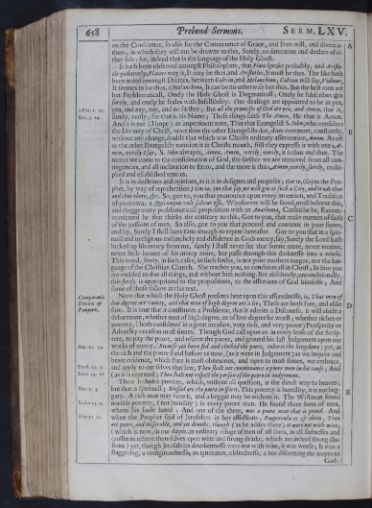 658
Prebend Sermons.
Serm. LXV.
on the Conscience, so also for the Concurrence of Grace, and Free-will, and divers o-
658
Prebend Sermons.
Serm. LXV.
on the Conscience, so also for the Concurrence of Grace, and Free-will, and divers o-thers; in which they will not be drawne to this, Surely, to determine and declare of ei-
ther side; for, indeed that is the language of the Holy Ghost.
It hath been observed amongst Philosophers, that Plato speaks probably, and Aristo-
tle positively; Platoes way is, It may be thus, and Aristotles, It must be thus. The like hath
been noted amongst Divines, between Calvin, and Melanchton; Calvin will say, Videtur,
It seemes to be thus, Melanchton, It can be no otherwise but thus. But the best men are
but Problematicall, Onely the Holy Ghost is Dogmaticall; Onely he subscribes this
surely, and onely he seales with Infallibility. Our dealings are appointed to be in yea,
yea, 2 Cor. 1.20. and nay, nay, and no farther; But all the promises of God are yea, and Amen, that is,
surely, verily; for that is his Name; These things saith The Amen, He that is Amen. Rev. 3.14.
And it is not (I hope) an impertinent note, That that Euangelist S. Iohn, who considers
the Divinity of Christ, more then the other Euangelists doe, does evermore, constantly,
without any change, double that which was Christs ordinary asseveration, Amen. As oft
as the other Euangelists mention it in Christs mouth, still they expresse it with one A-
men, verily I say; S. Iohn alwayes, Amen, Amen, verily, verily, it is thus and thus. The
nearer we come to the consideration of God, the farther we are removed from all con-
tingencies, and all inclination to Error, and the more is this Amen, verily, surely, multi-
plied and established unto us.
It is in doctrines and opinions, as it is in designes and purposes; Goe to, (sayes the Pro-
phet, by way of reprehension) Goe to, you that say, we will goe to such a City, and trade thus
and thus there, &c. So, goe to, you that pronounce upon every invention, and Tradition
of your own, a Quicunque vult salvus esse, Whosoever will be saved, must beleeve this,
and clogge every problematicall proposition with an Anathema, Cursed be he, Excom-
municated he that thinks the contrary to this; Goe to you, that make matters of faith
of the passions of men. So also, goe to you that proceed and continue in your sinnes,
and say, Surely I shall have time enough to repent hereafter. Goe to you that in a spiri-
tuall and irreligious melancholy and diffidence in Gods mercy, say, Surely the Lord hath
locked up his mercy from me, surely I shall never see that Sunne more, never receive,
never feele beame of his mercy more, but passe through this darknesse into a worse.
This word, surely, in such cases, in such senses, is not your mothers tongue, not the lan-
guage of the Christian Church. She teaches you, to condition all in Christ; In him you
are enabled to doe all things, and without him nothing. But absolutely, unconditionally,
this surely is appropriated to the propositions, to the assertions of God himselfe; And
some of those follow in this text.
Now that which the Holy Ghost presents here upon this assurednesse, is, That men of Comparatio
Divitis &
Pauperis.
low degree are vanity, and that men of high degree are a lie; These are both sure, and alike
sure. It is true that it constitutes a Probleme, that it admits a Discourse, it will abide a
debatement, whether men of high degree, or of low degree be worst; whether riches or
poverty, (both considered in a great measure, very rich, and very poore) Prosperity or
Adversity occasion most sinnes. Though God call upon us in every leafe of the Scrip-
ture, to pity the poore, and relieve the poore, and ground his last Judgement upon our
works of mercy, Mat. 25.34. (Because you have fed and clothed the poore, inherit the kingdome) yet, as
the rich and the poore stand before us now, (as it were in Judgement) as we inquire and
heare evidence, which state is most obnoxious, and open to most sinnes, we embrace,
and apply to our selves that law, Exod. 23.3. Thou shalt not countenance a poore man in his cause; And
(as it is repeated) Thou shalt not respect the person of the poore in Iudgement.Levit. 19.15.
There is then a poverty, which, without all question, is the direct way to heaven;
but that is spirituall;Mat. 5.3. Blessed are the poore in spirit. This poverty is humility, it is not beg-
gary. A rich man may have it, and a beggar may be without it. The Wiseman found
not this poverty, Ecclus 25.2. (not humility) in every poore man. He found three sorts of men,
whom his soule hated; And one of the three, was a poore man that is proud. And
when the Prophet said of Jerusalem in her afflictions, Esay 51.21. Paupercula es & ebria, Thou
art poore, and miserable, and yet drunke, though (as he addes there) it were not with wine,
(which is now, in our dayes an ordinary refuge of men of all sorts, in all sadnesses and
crosses to relieve themselves upon wine and strong drinke, which are indeed strong illu-
sions) yet, though Jerusalems drunkennesse were not with wine, it was worse; It was a
staggering, a vertiginousnesse, an ignorance, a blindnesse, a not discerning the wayes to God;
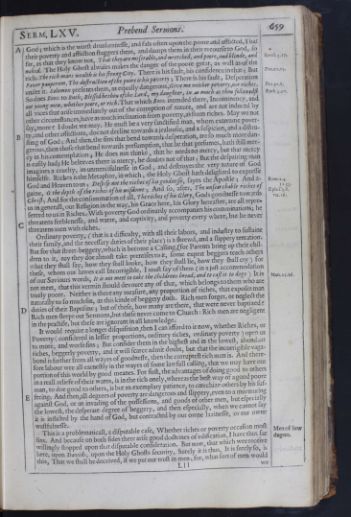 Serm. LXV.
Prebend Sermons.
659
God; which is the worst drunkennesse, and fals often upon the poore and afflicted, That
Serm. LXV.
Prebend Sermons.
659
God; which is the worst drunkennesse, and fals often upon the poore and afflicted, That
their poverty and affliction staggers them, and damps them in their recourse to God, so
far, as that they know not, That they are miserable, and wretched, and poore, and blinde,Revel. 3.17. and
naked. The Holy Ghost alwaies makes the danger of the poore great, as well as of the
rich. The rich mans wealth is his strong City. There is his fault, his confidence in that;Pro. 10.15. But
Pavor pauperum, The destruction of the poore is his poverty; There is his fault, Desperation
under it. Solomon presents them, as equally dangerous, Give me neither poverty, nor riches.Pro. 30.8.
So does Booz to Ruth. 3.10. Ruth, Blessed be thou of the Lord, my daughter, in as much as thou followedst
not young men, whether poore, or rich. That which Booz intended there, Incontinency, and
all vices that arise immediately out of the corruption of nature, and are not induced by
other circumstances, have as much inclination from poverty, as from riches. May we not
say, more? I doubt we may. He must be a very sanctified man, whom extreame pover-
ty, and other afflictions, doe not decline towards a jealousie, and a suspicion, and a distru-
sting of God; And then, the sins that bend towards desperation, are so much more dan-
gerous, then those that bend towards presumption, that he that presumes, hath still mer-
cy in his contemplation, He does not thinke, that he needs no mercy, but that mercy
is easily had; He beleeves there is mercy, he doubts not of that; But the despairing man
imagines a cruelty, an unmercifulnesse in God, and destroyes the very nature of God
himselfe. Riches is the Metaphor, in which, the Holy Ghost hath delighted to expresse
God and Heaven to us; Despise not the riches of his goodnesse, sayes the Apostle; And Rom. 2.4.
11.33. a-
gaine, O the depth of the riches of his wisdome; And so, after, The unsearchable riches of
Christ; And for the consummation of all, The riches of his Glory, Gods goodnesse towards Ephes. 3.8.
ver. 16.
us in generall, our Religion in the way, his Grace here, his Glory hereafter, are all repre-
sented to us in Riches. With poverty God ordinarily accompanies his comminations; he
threatens feeblenesse, and warre, and captivity, and poverty every where, but he never
threatens men with riches.
Ordinary poverty, (that is a difficulty, with all their labors, and industry to sustaine
their family, and the necessary duties of their place) is a shrewd, and a slippery tentation.
But for that street-beggery, which is become a Calling, (for Parents bring up their chil-
dren to it, nay they doe almost take prentises to it, some expert beggers teach others
what they shall say, how they shall looke, how they shall lie, how they shall cry) for
these, whom our lawes call Incorrigible, I must say of them (in a just accommodation
of our Saviours words, It is not meet to take the childrens bread,Matt. 25.26. and to cast it to dogs) It is
not meet, that this vermin should devoure any of that, which belongs to them who are
truely poore. Neither is there any measure, any proportion of riches, that exposes man
naturally to so much sin, as this kinde of beggery doth. Rich men forget, or neglect the
duties of their Baptisme; but of these, how many are there, that were never baptized?
Rich men sleepe out Sermons, but these never come to Church: Rich men are negligent
in the practise, but these are ignorant in all knowledge.
It would require a longer disquisition, then I can afford to it now, whether Riches, or
Poverty (considered in lesser proportions, ordinary riches, ordinary poverty) open us
to more, and worse sins; But consider them in the highest and in the lowest, abundant
riches, beggerly poverty, and it will scarce admit doubt, but that the incorrigible vaga-
bond is farther from all wayes of goodnesse, then the corruptest rich man is. And there-
fore labour wee all earnestly in the wayes of some lawfull calling, that we may have our
portion of this world by good meanes. For first, the advantages of doing good to others
in a reall reliefe of their wants, is in the rich onely, whereas the best way of a good poore
man, to doe good to others, is but an exemplary patience, to catechize others by his suf-
fering; And then, all degrees of poverty are dangerous and slippery, even to a murmuring
against God, or an invading of the possessions, and goods of other men, but especially
the lowest, the desperate degree of beggery, and then especially, when we cannot say
it is inflicted by the hand of God, but contracted by our owne lazinesse, or our owne
wastfulnesse.
This is a problematicall, a disputable case, Whether riches or poverty occasion most Men of low
degree.
sins. And because on both sides there arise good doctrines of edification, I have thus far
willingly stopped upon that disputable consideration. But now, that which wee receive
here, upon Davids, upon the Holy Ghosts security, Surely it is thus, It is surely so, is
this, That we shall be deceived, if we put our trust in men; for, what sort of men would Lll we
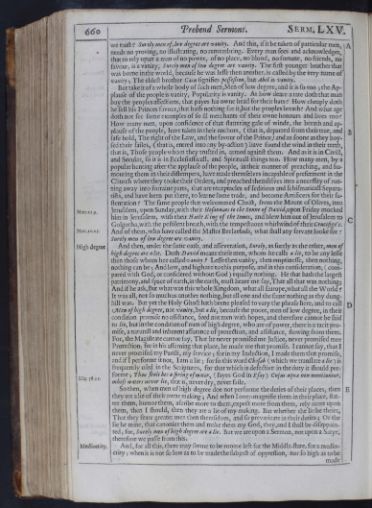 660
Prebend Sermons.
Serm. LXV.
we trust? Surely men of low degree are vanity. And this, if it be taken of particular men,
660
Prebend Sermons.
Serm. LXV.
we trust? Surely men of low degree are vanity. And this, if it be taken of particular men,
needs no proving, no illustrating, no remembring. Every man sees and acknowledges,
that to rely upon a man of no power, of no place, no blood, no fortune, no friends, no
favour, is a vanity, Surely men of low degree are vanity. The first younger brother that
was borne in the world, because he was lesse then another, is called by the very name of
vanity; The eldest brother Cain signifies possession, but Abel is vanity.
But take it of a whole body of such men, Men of low degree, and it is so too; the Ap-
plause of the people is vanity, Popularity is vanity. At how deare a rate doth that man
buy the peoples affections, that payes his owne head for their hats? How cheaply doth
he sell his Princes favour, that hath nothing for it, but the peoples breath? And what age
doth not see some examples of so ill merchants of their owne honours and lives too?
How many men, upon confidence of that flattering gale of winde, the breath and ap-
plause of the people, have taken in their anchors, (that is, departed from their true, and
safe hold, The right of the Law, and the favour of the Prince) and as soone as they hoy-
sed their sailes, (that is, entred into any by-action) have found the wind in their teeth,
that is, Those people whom they trusted in, armed against them. And as it is in Civill,
and Secular, so it is in Ecclesiasticall, and Spirituall things too. How many men, by a
popular hunting after the applause of the people, in their manner of preaching, and hu-
mouring them in their distempers, have made themselves incapable of preferment in the
Church where they tooke their Orders, and preached themselves into a necessity of run-
ning away into forraine parts, that are receptacles of seditious and schismaticall Separa-
tists, and have been put there, to learne some trade, and become Artificers for their su-
stentation? The same people that welcommed Christ, from the Mount of Olives, into
Jerusalem, Matt. 21.9. upon Sunday, with their Hosannaes to the Sonne of David, upon Friday mocked
him in Jerusalem, with their Haile King of the Iewes, and blew him out of Jerusalem to
Golgotha, with the pestilent breath, with the tempestuous whirlwind of their Crucifige's.
And of them, Matt. 10.25. who have called the Master Beelzebub, what shall any servant looke for?
Surely men of low degree are vanity.
And then, High degree under the same oath, and asseveration, Surely, as surely as the other, men of
high degree are a lie. Doth David meane these men, whom he calls a lie, to be any lesse
then those whom hee called vanity? Lesse then vanity, then emptinesse, then nothing,
nothing can be; And low, and high are to this purpose, and in this consideration, (com-
pared with God, or considered without God) equally nothing. He that hath the largest
patrimony, and space of earth, in the earth, must heare me say, That all that was nothing;
And if he ask, But what was this whole Kingdom, what all Europe, what all the World?
It was all, not so much as another nothing, but all one and the same nothing as thy dung-
hill was. But yet the Holy Ghost hath beene pleased to vary the phrase here, and to call
Men of high degree, not vanity, but a lie, because the poore, men of low degree, in their
condition promise no assistance, feed not men with hopes, and therefore cannot be said
to lie, but in the condition of men of high degree, who are of power, there is a tacit pro-
mise, a naturall and inherent assurance of protection, and assistance, flowing from them.
For, the Magistrate cannot say, That he never promised me Justice, never promised mee
Protection; for in his assuming that place, he made me that promise. I cannot say, that I
never promised my Parish, my service; for in my Induction, I made them that promise,
and if I performe it not, I am a lie; for so this word Chasab (which we translate a lie) is
frequently used in the Scriptures, for that which is defective in the duty it should per-
forme; Thou shalt bee a spring of water, (sayes God in Esay) Cujus aquæ non mentiuntur, Esay 58.11.
mhosewhose waters never lie, that is, never dry, never faile.
So then, when men of high degree doe not performe the duties of their places, then
they are a lie of their owne making; And when I over-magnifie them in their place, flat-
ter them, humor them, ascribe more to them, expect more from them, rely more upon
them, then I should, then they are a lie of my making. But whether the lie be theirs,
That they feare greater men then themselves, and so prevaricate in their duties; Or the
lie be mine, that canonize them and make them my God, they, and I shall be disappoin-
ted; for, Surely men of high degree are a lie. But we are upon a Sermon, not upon a Satyr,
therefore we passe from this.
And, Mediocrity. for all this, there may seeme to be roome left for the Middle-state, for a medio-
crity; when it is not so low as to be made the subject of oppression, nor so high as to be made
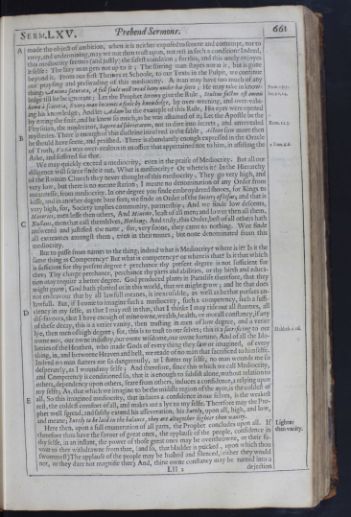 Serm. LXV.
Prebend Sermons.
661
made the object of ambition, when it is neither exposed to scorne and contempt, nor to
Serm. LXV.
Prebend Sermons.
661
made the object of ambition, when it is neither exposed to scorne and contempt, nor to
envy, and undermining, may we not then trust upon, not rest in such a condition? Indeed,
this mediocrity seemes (and justly) the safest condition; for this, and this onely enjoyes
it selfe: The lazy man gets not up to it; The stirring man stayes not at it, but is gone
beyond it. From our first Themes at Schoole, to our Texts in the Pulpit, we continue
our praysing and perswading of this mediocrity. A man may have too much of any
thing; Anima saturata, A full soule will tread hony under his feete; Prov. 27.7. He may take in know-
ledge till he be ignorant; Let the Prophet Ieremy give the Rule, Ier. 10.14. Stultus factus est omnis
homo à scientia, Every man becomes a foole by knowledge, by over-weening, and over-valu-
ing his knowledge; And let Adam be the example of this Rule, His eyes were opened
by eating the fruit, and he knew so much, as he was ashamed of it; Let the Apostle be the
Physitian, the moderator, Sapere ad sobrietatem, not to dive into secrets, Rom. 12.3. and unrevealed
mysteries. There is enough of this doctrine involved in the fable, Acteon saw more then
he should have seene, and perished. There is abundantly enough expressed in the Oracle
of Truth, Vzza was over-zealous in an office that appertained not to him, 2 Sam. 6.6. in assisting the
Arke, and suffered for that.
We may quickly exceed a mediocrity, even in the praise of Mediocrity. But all our
diligence will scarce finde it out. What is mediocrity? Or where is it? In the Hierarchy
of the Roman Church they never thought of this mediocrity; They go very high, and
very low, but there is no meane station; I meane no denomination of any Order from
meannesse, from mediocrity. In one degree you finde embroydered shooes, for Kings to
kisse, and in another degree bare feet; we finde an Order of the Society of Iesus; and that is
very high, for, Society implies community, partnership; And we finde low descents,
Minorits, men lesse then others, And Minims, least of all men; and lower then all them,
Nullans, men that call themselves, Nothing; And truly, this Order, best of all others hath
answered and justified the name, for, very soone, they came to nothing. Wee finde
all extreames amongst them, even in their names, but none denominated from this
mediocrity.
But to passe from names to the thing; indeed what is Mediocrity? where is it? Is it the
same thing as Competency? But what is competency? or where is that? Is it that which
is sufficient for thy present degree? perchance thy present degree is not sufficient for
thee; Thy charge perchance, perchance thy parts and abilities, or thy birth and educa-
tion may require a better degree. God produced plants in Paradise therefore, that they
might grow; God hath planted us in this world, that we might grow; and he that does
not endeavour that by all lawfull meanes, is inexcusable, as well as he that pursues un-
lawfull. But, if I come to imagine such a mediocrity, such a competency, such a suffi-
ciency in my selfe, as that I may rest in that, that I thinke I may ride out all stormes, all
dis-favours, that I have enough of mine owne, wealth, health, or morall constancy, if any
of these decay, this is a verier vanity, then trusting in men of low degree, and a verier
lye, then men of high degree; for, this is to trust to our selves;Habbak. 1.16. this is a sacrificing to our
owne nets, our owne industry, our owne wisdome, our owne fortune; And of all the Ido-
latries of the Heathen, who made Gods of every thing they saw or imagined, of every
thing, in, and betweene Heaven and hell, we reade of no man that sacrificed to himselfe.
Indeed no man flatters me so dangerously, as I flatter my selfe, no man wounds me so
desperately, as I wound my selfe; And therefore, since this which we call Mediocrity,
and Competency is conditioned so, that it is enough to subsist alone, without relation to
others, dependency upon others, feare from others, induces a confidence, a relying upon
my selfe; As, that which we imagine to be the middle region of the ayre, is the coldest of
all, So this imagined mediocrity, that induces a confidence in our selves, is the weakest
rest, the coldest comfort of all, and makes me a lye to my selfe. Therefore may the Pro-
phet well spread, and safely extend his asseveration, his Surely, upon all, high, and low,
and meane; Surely to be laid in the balance, they are altogether lighter then vanity.
Here then, upon a full enumeration of all parts, the Prophet concludes upon all.Lighter
then vanity. If
therefore thou have the favour of great ones, the applause of the people, confidence in
thy selfe, in an instant, the power of those great ones may be overthrowne, or their fa-
vour to thee withdrawne from thee, (and so, that bladder is pricked, upon which thou
swommest) The applause of the people may be hushed and silenced, (either they would
not, or they dare not magnifie thee) And, thine owne constancy may be turned into a Lll2 dejection
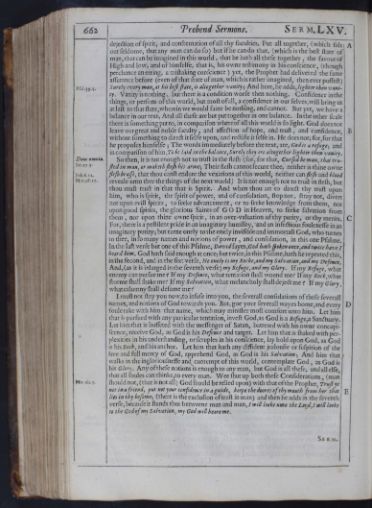 662
Prebend Sermons.
Serm. LXV.
dejection of spirit, and consternation of all thy faculties. Put all together, (which fals
662
Prebend Sermons.
Serm. LXV.
dejection of spirit, and consternation of all thy faculties. Put all together, (which fals
out seldome, that any man can do so) but if he can do that, (which is the best state of
man, that can be imagined in this world, that he hath all these together, the favour of
High and low, and of himselfe, that is, his owne testimony in his conscience, (though
perchance an erring, a mistaking conscience) yet, the Prophet had delivered the same
assurance before (even of that state of man, which is rather imagined, then ever possest)
Surely every man, Psal. 39.5. at his best state, is altogether vanity; And here, he adds, lighter then vani-
ty. Vanity is nothing, but there is a condition worse then nothing. Confidence in the
things, or persons of this world, but most of all, a confidence in our selves, will bring us
at last to that state, wherein we would faine be nothing, and cannot. But yet, we have a
balance in our text; And all these are but put together in one balance. In the other scale
there is something put to, in comparison whereof all this world is so light. God does not
leave our great and noble faculty, and affection of hope, and trust, and confidence,
without something to direct it selfe upon, and rectifie it selfe in. He does not; for, for that
he proposes himselfe; The words immediately before the text, are, God is a refuge; and
in comparison of him, To be laid in the balance, Surely they are altogether lighter then vanity.
So then, Deus omnia.
Ier. 17.5. it is not enough not to trust in the flesh (for, for that, Cursed be man, that tru-
sted in man, or maketh flesh his arme; Their flesh cannot secure thee, neither is thine owne
flesh brasse,Iob 6.12.
Mat. 16.17. that thou canst endure the vexations of this world, neither can flesh and blood
reveale unto thee the things of the next world) It is not enough not to trust in flesh, but
thou must trust in that that is Spirit. And when thou art to direct thy trust upon
him, who is spirit, the spirit of power, and of consolation, stop not, stray not, divert
not upon evill spirits, to seeke advancement, or to seeke knowledge from them, nor
upon good spirits, the glorious Saints of GOD in Heaven, to seeke salvation from
them, nor upon thine owne spirit, in an over-valuation of thy purity, or thy merits.
For, there is a pestilent pride in an imaginary humility, and an infectious foulenesse in an
imaginary purity; but turne onely to the onely invisible and immortall God, who turnes
to thee, in so many names and notions of power, and consolation, in this one Psalme.
In the last verse but one of this Psalme, David sayes, God hath spoken once, and twice have I
heard him. God hath said enough at once; but twice, in this Psalme, hath he repeated this,
in the second, and in the sixt verse, He onely is my Rocke, and my Salvation, and my Defence,
And, (as it is inlarged in the seventh verse) my Refuge, and my Glory. If my Refuge, what
enemy can pursue me? If my Defence, what tentation shall wound me? If my Rock, what
storme shall shake me? If my Salvation, what melancholy shall deject me? If my Glory,
what calumny shall defame me?
I must not stay you now, to infuse into you, the severall consolations of these severall
names, and notions of God towards you. But, goe your severall wayes home, and every
soule take with him that name, which may minister most comfort unto him. Let him
that is pursued with any particular tentation, invest God, as God is a Refuge, a Sanctuary.
Let him that is buffeted with the messenger of Satan, battered with his owne concupi-
scence, receive God, as God is his Defence and target. Let him that is shaked with per-
plexities in his understanding, or scruples in his conscience, lay hold upon God, as God
is his Rock, and his anchor. Let him that hath any diffident jealousie or suspition of the
free and full mercy of God, apprehend God, as God is his Salvation; And him that
walks in the ingloriousnesse and contempt of this world, contemplate God, as God is
his Glory. Any of these notions is enough to any man, but God is all these, and all else,
that all soules can thinke, to every man. Wee shut up both these Considerations, (man
should not, Mic. ult. 5. (that is not all) God should be relied upon) with that of the Prophet, Trust ye
not in a friend, put not your confidence in a guide, keepe the doores of thy mouth from her that
lies in thy bosome; (there is the exclusion of trust in man) and then he adds in the seventh
verse, because it stands thus betweene man and man, I will looke unto the Lord, I will looke
to the God of my Salvation, my God will heare me. Serm
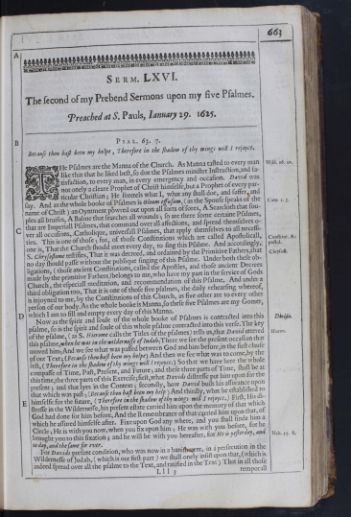 663
Serm. LXVI.
663
Serm. LXVI.
The second of my Prebend Sermons upon my five Psalmes.
Preached at S. Pauls, Ianuary 29. 1625.
Psal. 63.7.
Because thou hast been my helpe, Therefore in the shadow of thy wings will I rejoyce.
THeThe Psalmes are the Manna of the Church.Wisd. 16. 20. As Manna tasted to every man
like that that he liked best, so doe the Psalmes minister Instruction, and sa-
tisfaction, to every man, in every emergency and occasion. David was
not onely a cleare Prophet of Christ himselfe, but a Prophet of every par-
ticular Christian; He foretels what I, what any shall doe, and suffer, and
say. And as the whole booke of Psalmes is Oleum effusum,Cant. 1. 3. (as the Spouse speaks of the
name of Christ) an Oyntment powred out upon all sorts of sores, A Searcloth that sou-
ples all bruises, A Balme that searches all wounds; so are there some certaine Psalmes,
that are Imperiall Psalmes, that command over all affections, and spread themselves o-
ver all occasions, Catholique, universall Psalmes, that apply themselves to all necessi-
ties. This is one of those; for, of those Constitutions which are called Apostolicall, Constitut. A-
postol.
one is, That the Church should meet every day, to sing this Psalme. And accordingly,
S. Chrysostome testifies, That it was decreed, and ordained by the Primitive Fathers, Chrysost. that
no day should passe without the publique singing of this Psalme. Under both these ob-
ligations, (those ancient Constitutions, called the Apostles, and those ancient Decrees
made by the primitive Fathers) belongs to me, who have my part in the service of Gods
Church, the especiall meditation, and recommendation of this Psalme. And under a
third obligation too, That it is one of those five psalmes, the daily rehearsing whereof,
is injoyned to me, by the Constitutions of this Church, as five other are to every other
person of our body. As the whole booke is Manna, so these five Psalmes are my Gomer,
which I am to fill and empty every day of this Manna. Now as the spirit and soule of the whole booke of Psalmes is contracted into this Divisio.
psalme, so is the spirit and soule of this whole psalme contracted into this verse. The key
of the psalme, (as S. Hierome calls the Titles of the psalmes) tells us, Hieron. that David uttered
this psalme, when he was in the wildernesse of Iudah; There we see the present occasion that
moved him; And we see what was passed between God and him before, in the first clause
of our Text; (Because thou hast been my helpe) And then we see what was to come, by the
rest, (Therefore in the shadow of thy wings will I rejoyce.) So that we have here the whole
compasse of Time, Past, Present, and Future; and these three parts of Time, shall be at
this time, the three parts of this Exercise; first, what Davids distresse put him upon for the
present; and that lyes in the Context; secondly, how David built his assurance upon
that which was past; (Because thou hast been my help) And thirdly, what he established to
himselfe for the future, (Therefore in the shadow of thy wings will I rejoyce.) First, His di-
stresse in the Wildernesse, his present estate carried him upon the memory of that which
God had done for him before, And the Remembrance of that carried him upon that, of
which he assured himselfe after. Fixe upon God any where, and you shall finde him a
Circle; He is with you now, when you fix upon him; He was with you before, for he
brought you to this fixation; and he will be with you hereafter, for He is yesterday,Heb. 13. 8. and
to day, and the same for ever.
For Davids present condition, who was now in a banishment, in a persecution in the
Wildernesse of Judah, (which is our first part) we shall onely insist upon that, (which is
indeed spread over all the psalme to the Text, and ratified in the Text) That in all those Lll3 temporall
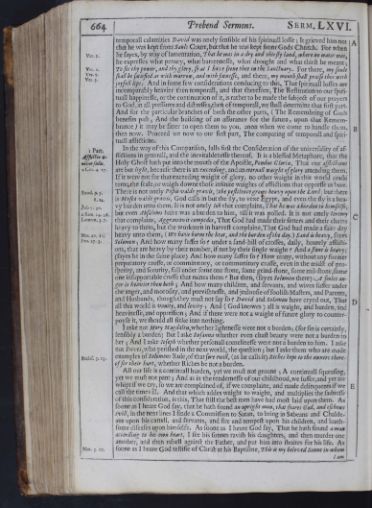 664
Prebend Sermons.
Serm. LXVI.
temporall calamities David was onely sensible of his spirituall losse; It grieved him not
664
Prebend Sermons.
Serm. LXVI.
temporall calamities David was onely sensible of his spirituall losse; It grieved him not
that he was kept from Sauls Court, but that he was kept from Gods Church. For when
he sayes, Ver. 1. by way of lamentation, That he was in a dry and thirsty land, where no water was,
he expresses what penury, what barrennesse, what drought and what thirst he meant;
To see thy power,Ver. 2.
Ver. 5.
Ver. 3. and thy glory, so as I have seene thee in the Sanctuary. For there, my soule
shall be satisfied as with marrow, and with fatnesse, and there, my mouth shall praise thee with
joyfull lips. And in some few considerations conducing to this, That spirituall losses are
incomparably heavier then temporall, and that therefore, The Restitution to our spiri-
tuall happinesse, or the continuation of it, is rather to be made the subject of our prayers
to God, in all pressures and distresses, then of temporall, we shall determine that first part.
And for the particular branches of both the other parts, (The Remembring of Gods
benefits past, And the building of an assurance for the future, upon that Remem-
brance) it may be fitter to open them to you, anon when we come to handle them,
then now. Proceed we now to our first part, The comparing of temporall and spiri-
tuall afflictions.
In the way of this Comparison, 1 Part.
Afflictio u-
niversalis. falls first the Consideration of the universality of af-
flictions in generall, and the inevitablenesse thereof. It is a blessed Meraphore, that the
Holy Ghost hath put into the mouth of the Apostle, Pondus Gloriæ, That our afflictions
2 Cor. 4. 17. are but light, because there is an exceeding, and an eternall waight of glory attending them.
If it were not for that exceeding waight of glory, no other waight in this world could
turne the scale, or waigh downe those infinite waights of afflictions that oppresse us here.
There is not onely Pestis valde gravis, (the pestilence grows heavy upon the Land) but there Exod. 9. 3.
is Musca valde gravis, 8. 24. God calls in but the fly, to vexe Egypt, and even the fly is a hea-
vy burden unto them.Job 7.20. It is not onely Iob that complains, That he was a burden to himselfe,
2 Sam. 14. 26. but even Absaloms haire was a burden to him, till it was polled. It is not onely Ieremy
that complains, Aggravavit compedes, That God had made their fetters and their chains Lament. 3. 7.
heavy to them, but the workmen in harvest complaine, That God had made a faire day
heavy unto them, Mat. 20.12. (We have borne the heat, and the burden of the day.) Sand is heavy, sayes
Pro. 27. 3. Solomon; And how many suffer so? under a sand-hill of crosses, daily, hourely afflicti-
ons, that are heavy by their number, if not by their single waight? And a stone is heavy;
(sayes he in the same place). And how many suffer so? How many, without any former
preparatory crosse, or comminatory, or commonitory crosse, even in the midst of pro-
sperity, and security, fall under some one stone, some grind-stone, some mil-stone, some
one insupportable crosse that ruines them? But then, (sayes Solomon there) A fooles an-
ger is heavier then both; And how many children, and servants, and wives suffer under
the anger, and morosity, and peevishnesse, and jealousie of foolish Masters, and Parents,
and Husbands, though they must not say so? David and Solomon have cryed out, That
all this world is vanity, and levity; And (God knowes) all is waight, and burden, and
heavinesse, and oppression; And if there were not a waight of future glory to counter-
poyse it, we should all sinke into nothing. I aske not Mary Magdalen, whether lightnesse were not a burden; (for sin is certainly,
sensibly a burden) But I aske Susanna whether even chast beauty were not a burden to
her; And I aske Ioseph whether personall comelinesse were not a burden to him. I aske
not Dives, who perished in the next world, the question; but I aske them who are made
examples of Solomons Rule, Eccles. 5. 13. of that sore evill, (as he calls it) Riches kept to the owners there-
of for their hurt, whether Riches be not a burden. All our life is a continuall burden, yet we must not groane; A continuall squeasing,
yet we must not pant; And as in the tendernesse of our childhood, we suffer, and yet are
whipt if we cry, so we are complained of, if we complaine, and made delinquents if we
call the times ill. And that which addes waight to waight, and multiplies the sadnesse
of this consideration, is this, That still the best men have had most laid upon them. As
soone as I heare God say, that he hath found an upright man, that feares God, and eschews
evill, in the next lines I finde a Commission to Satan, to bring in Sabeans and Chalde-
ans upon his cattell, and servants, and fire and tempest upon his children, and loath-
some diseases upon himselfe. As soone as I heare God say, That he hath found a man
according to his own heart, I see his sonnes ravish his daughters, and then murder one
another, Mat. 3. 17. and then rebell against the Father, and put him into straites for his life. As
soone as I heare God testifie of Christ at his Baptisme, This is my beloved Sonne in whom I am
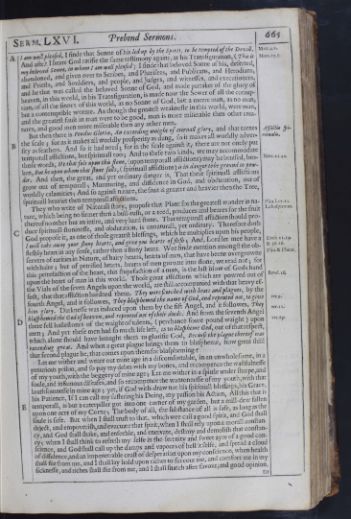 Serm. LXVI.
Prebend Sermons.
665
I am well pleased, I finde that Sonne of his Matt. 4. 1.
led up by the Spirit, to be tempted of the Devill.
Serm. LXVI.
Prebend Sermons.
665
I am well pleased, I finde that Sonne of his Matt. 4. 1.
led up by the Spirit, to be tempted of the Devill.
Matt. 17. 5. And after I heare God ratifie the same testimony againe, at his Transfiguration, (This is
my beloved Sonne, in whom I am well pleased) I finde that beloved Sonne of his, deserted,
abandoned, and given over to Scribes, and Pharisees, and Publicans, and Herodians,
and Priests, and Souldiers, and people, and Judges, and witnesses, and executioners,
and he that was called the beloved Sonne of God, and made partaker of the glory of
heaven, in this world, in his Transfiguration, is made now the Sewer of all the corrup-
tion, of all the sinnes of this world, as no Sonne of God, but a meere man, as no man,
but a contemptible worme. As though the greatest weaknesse in this world, were man,
and the greatest fault in man were to be good, man is more miserable then other crea-
tures, and good men more miserable then any other men. But then there is Pondus Gloriæ, An exceeding waight of eternall glory,Afflictio spi-
ritualis. and that turnes
the scale; for as it makes all worldly prosperity as dung, so it makes all worldly adver-
sity as feathers. And so it had need; for in the scale against it, there are not onely put
temporall afflictions, but spirituall too; And to these two kinds, we may accommodate
those words, He that fals upon this stone, (upon temporall afflictions) may be bruised, Matt. 21.44. bro-
ken, But he upon whom that stone falls, (spirituall afflictions) is in danger to be ground to pow-
der. And then, the great, and yet ordinary danger is, That these spirituall afflictions
grow out of temporall; Murmuring, and diffidence in God, and obduration, out of
worldly calamities; And so against nature, the fruit is greater and heavier then the Tree,
spirituall heavier then temporall afflictions. They who write of Naturall story, propose that Plant for the greatest wonder in Plin. l. 27. 11.
Lithospermus. na-
ture, which being no firmer then a bull-rush, or a reed, produces and beares for the fruit
thereof no other but an intire, and very hard stone. That temporall affliction should pro-
duce spirituall stoninesse, and obduration, is unnaturall, yet ordinary. Therefore doth
God propose it, as one of those greatest blessings, which he multiplies upon his people,
I will take away your stony hearts, and give you hearts of flesh; And, Ezek. 11. 19.
& 36.26. Lord let mee have a
fleshly heart in any sense, rather then a stony heart. Wee finde mention amongst the ob-
servers of rarities in Nature, of hairy hearts, hearts of men, that have beene overgrowne Plin. & Plutar.
with haire; but of petrified hearts, hearts of men growne into stone, we read not; for
this petrefaction of the heart, this stupefaction of a man, is the last blow of Gods hand
upon the heart of man in this world.Revel. 16. Those great afflictions which are powred out of
the Vials of the seven Angels upon the world, are still accompanied with that heavy ef-
fect, that that affliction hardned them. They were scorched with heats and plagues, by the
fourth Angel, and it followes, They blasphemed the name of God, and repented not,ver. 9. to give
him glory. Darknesse was induced upon them by the fift Angel, and it followes, ver. 11. They
blasphemed the God of heaven, and repented not of their deeds. And from the seventh Angel
there fell hailestones of the waight of talents, ver. 29. (perchance foure pound waight) upon
men; And yet these men had so much life left, as to blaspheme God, out of that respect,
which alone should have brought them to glorifie God, Because the plague thereof was
exceeding great. And when a great plague brings them to blaspheme, how great shall
that second plague be, that comes upon them for blaspheming? Let me wither and weare out mine age in a discomfortable, in an unwholesome, in a
penurious prison, and so pay my debts with my bones, and recompence the wastfulnesse
of my youth, with the beggery of mine age; Let me wither in a spittle under sharpe, and
foule, and infamous diseases, and so recompence the wantonnesse of my youth, with that
loathsomnesse in mine age; yet, if God with-draw not his spirituall blessings, his Grace,
his Patience, If I can call my suffering his Doing, my passion his Action, All this that is
temporall, is but a caterpiller got into one corner of my garden, but a mill-dew fallen
upon one acre of my Corne; The body of all, the substance of all is safe, as long as the
soule is safe. But when I shall trust to that, which wee call a good spirit, and God shall
deject, and empoverish, and evacuate that spirit, when I shall rely upon a morall constan-
cy, and God shall shake, and enfeeble, and enervate, destroy and demolish that constan-
cy; when I shall think to refresh my selfe in the serenity and sweet ayre of a good con-
science, and God shall call up the damps and vapours of hell it selfe, and spread a cloud
of diffidence, and an impenetrable crust of desperation upon my conscience; when health
shall flie from me, and I shall lay hold upon riches to succour me, and comfort me in my
sicknesse, and riches shall flie from me, and I shall snatch after favour, and good opinion, to
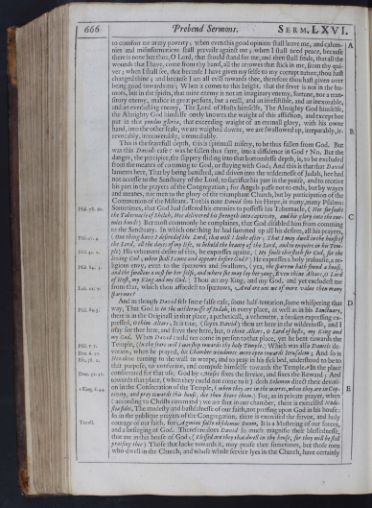 666
Prebend Sermons.
Serm. LXVI.
to comfort me in my poverty; when even this good opinion shall leave me, and calum-
666
Prebend Sermons.
Serm. LXVI.
to comfort me in my poverty; when even this good opinion shall leave me, and calum-nies and misinformations shall prevaile against me; when I shall need peace, because
there is none but thou, O Lord, that should stand for me, and then shall finde, that all the
wounds that I have, come from thy hand, all the arrowes that stick in me, from thy qui-
ver; when I shall see, that because I have given my selfe to my corrupt nature, thou hast
changed thine; and because I am all evill towards thee, therefore thou hast given over
being good towards me; When it comes to this height, that the fever is not in the hu-
mors, but in the spirits, that mine enemy is not an imaginary enemy, fortune, nor a tran-
sitory enemy, malice in great persons, but a reall, and an irresistible, and an inexorable,
and an everlasting enemy, The Lord of Hosts himselfe, The Almighty God himselfe,
the Almighty God himselfe onely knowes the waight of this affliction, and except hee
put in that pondus gloriæ, that exceeding waight of an eternall glory, with his owne
hand, into the other scale, we are waighed downe, we are swallowed up, irreparably, ir-
revocably, irrecoverably, irremediably. This is the fearefull depth, this is spirituall misery, to be thus fallen from God. But
was this Davids case? was he fallen thus farre, into a diffidence in God? No. But the
danger, the precipice, the slippery sliding into that bottomlesse depth, is, to be excluded
from the meanes of comming to God, or staying with God; And this is that that David
laments here, That by being banished, and driven into the wildernesse of Judah, hee had
not accesse to the Sanctuary of the Lord, to sacrifice his part in the praise, and to receive
his part in the prayers of the Congregation; for Angels passe not to ends, but by wayes
and meanes, nor men to the glory of the triumphant Church, but by participation of the
Communion of the Militant. To this note David sets his Harpe, in many, many Psalms:
Sometimes, Psal. 78. 60. that God had suffered his enemies to possesse his Tabernacle, (Hee forsooke
the Tabernacle of Shiloh, Hee delivered his strength into captivity, and his glory into the ene-
mies hands) But most commonly he complaines, that God disabled him from comming
to the Sanctuary. In which one thing he had summed up all his desires, all his prayers,
(One thing have I desired of the Lord,Psal. 27. 4. that will I looke after; That I may dwell in the house of
the Lord, all the dayes of my life, to behold the beauty of the Lord, and to enquire in his Tem-
ple) His vehement desire of this, Psal. 42. 2. he expresses againe, (My soule thirsteth for God, for the
living God; when shall I come and appeare before God?) He expresses a holy jealousie, a re-
ligious envy, Psal. 84. 3. even to the sparrows and swallows, (yea, the sparrow hath found a house,
and the swallow a nest for her selfe, and where she may lay her yong, Even thine Altars, O Lord
of Host, my King and my God.) Thou art my King, and my God, and yet excludest me
from that, Luk. 12. 7. which thou affordest to sparrows, And are not we of more value then many
sparrows? And as though David felt some false ease, some half-tentation, some whispering that
way, Psal. 84. 3. That God is in the wildernesse of Iudah, in every place, as well as in his Sanctuary,
there is in the Originall in that place, a patheticall, a vehement, a broken expressing ex-
pressed, O thine Altars; It is true, (sayes David) thou art here in the wildernesse, and I
may see thee here, and serve thee here, but, O thine Altars, O Lord of hosts, my King and
my God. When David could not come in person to that place, yet he bent towards the
Temple, Psal. 5. 7. (In thy feare will I worship towards thy holy Temple.) Which was also Daniels de-
votion; when he prayed, Dan. 6. 10. his Chamber windowes were open towards Ierusalem; And so is
Hezekias turning to the wall to weepe, Esa. 38. 2. and to pray in his sick bed, understood to be to
that purpose, to conforme, and compose himselfe towards the Temple. In the place
consecrated for that use, God by Moses fixes the service, and fixes the Reward; And Deut. 31. 11.
towards that place, (when they could not come to it) doth Solomon direct their devoti-
on in the Consecration of the Temple, 1 King. 8. 44. (when they are in the warres, when they are in Cap-
tivity, and pray towards this house, doe thou heare them.) For, as in private prayer, when
(according to Christs command) we are shut in our chamber, there is exercised Mode-
stia fidei, The modesty and bashfulnesse of our faith, not pressing upon God in his house:
so in the publique prayers of the Congregation, there is exercised the fervor, and holy
courage of our faith, Tertull. for Agmine facto obsidemus Deum, It is a Mustering of our forces,
and a besieging of God. Therefore does David so much magnifie their blessednesse,
that are in this house of God; (Blessed are they that dwell in thy house, for they will be still
praising thee) Those that looke towards it, may praise thee sometimes, but those men
who dwell in the Church, and whose whole service lyes in the Church, have certainly an
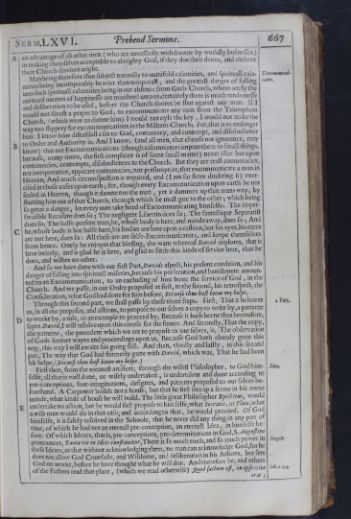 Serm. LXVI.
Prebend Sermons.
667
an advantage of all other men (who are necessarily withdrawne by worldly businesses)
Serm. LXVI.
Prebend Sermons.
667
an advantage of all other men (who are necessarily withdrawne by worldly businesses)
in making themselves acceptable to almighty God, if they doe their duties, and observe
their Church-services aright. Man being therefore thus subject naturally to manifold calamities, Excommuni-
catio. and spirituall cala-
mities being incomparably heavier then temporall, and the greatest danger of falling
into such spirituall calamities being in our absence from Gods Church, where onely the
outward meanes of happinesse are ministred unto us, certainely there is much tendernesse
and deliberation to be used, before the Church doores be shut against any man. If I
would not direct a prayer to God, to excommunicate any man from the Triumphant
Church, (which were to damne him) I would not oyle the key, I would not make the
way too slippery for excommunications in the Militant Church; For, that is to endanger
him. I know how distastfull a sin to God, contumacy, and contempt, and disobedience
to Order and Authority is; And I know, (and all men, that choose not ignorance, may
know) that our Excommunications (though calumniators impute them to small things,
because, many times, the first complaint is of some small matter) never issue but upon
contumacies, contempts, disobediences to the Church. But they are reall contumacies,
not interpretative, apparant contumacies, not presumptive, that excommunicate a man in
Heaven; And much circumspection is required, and (I am far from doubting it) exer-
cised in those cases upon earth; for, though every Excommunication upon earth be not
sealed in Heaven, though it damne not the man, yet it dammes up that mans way, by
shutting him out of that Church, through which he must goe to the other; which being
so great a danger, let every man take heed of Excommunicating himselfe. The imper-
swasible Recusant does so; The negligent Libertin does so; The fantastique Separatist
does so; The halfe-present man, he, whose body is here, and minde away, does so; And
he, whose body is but halfe here, his limbes are here upon a cushion, but his eyes, his eares
are not here, does so: All these are are selfe-Excommunicators, and keepe themselves
from hence. Onely he enjoyes that blessing, the want whereof David deplores, that is
here intirely, and is glad he is here, and glad to finde this kinde of service here, that he
does, and wishes no other. And so we have done with our first Part, Davids aspect, his present condition, and his
danger of falling into spirituall miseries, because his persecution, and banishment amoun-
ted to an Excommunication, to an excluding of him from the service of God, in the
Church. And we passe, in our Order proposed at first, to the second, his retrospect, the
Consideration, what God had done for him before, Because thou hast beene my helpe.
Through this second part, we shall passe by these three steps. First, 2 Part. That it behoves
us, in all our purposes, and actions, to propose to our selves a copy to write by, a patterne
to worke by, a rule, or an example to proceed by, Because it hath beene thus heretofore,
sayes David, I will resolve upon this course for the future. And secondly, That the copy,
the patterne, the precedent which we are to propose to our selves, is, The observation
of Gods former wayes and proceedings upon us, Because God hath already gone this
way, this way I will awaite his going still. And then, thirdly and lastly, in this second
part, The way that God had formerly gone with David, which was, That he had been
his helpe, (Because thou hast beene my helpe.) First then, from the meanest artificer, through the wisest Philosopher, to God Ideæ. him-
selfe, all that is well done, or wisely undertaken, is undertaken and done according to
pre-conceptions, fore-imaginations, designes, and patterns proposed to our selves be-
forehand. A Carpenter builds not a house, but that he first sets up a frame in his owne
minde, what kinde of house he will build. The little great Philosopher Epictetus, would
undertake no action, but he would first propose to himselfe, what Socrates, or Plato, what
a wise man would do in that case, and according to that, he would proceed. Of God
himselfe, it is safely resolved in the Schoole, that he never did any thing in any part of
time, of which he had not an eternall pre-conception, an eternall Idea, in himselfe be-
fore. Of which Ideaes, that is, pre-conceptions, pre-determinations in God, S. Augustine
pronounces, Tanta vis in Ideis constituitur, There is so much truth, August. and so much power in
these Ideaes, as that without acknowledging them, no man can acknowledge God, for he
does not allow God Counsaile, and Wisdome, and deliberation in his Actions, but sets
God on worke, before he have thought what he will doe. And therefore he, and others
of the Fathers read that place, Ioh. 1. 3, 4. (which we read otherwise) Quod factum est, in ipso vita erat;
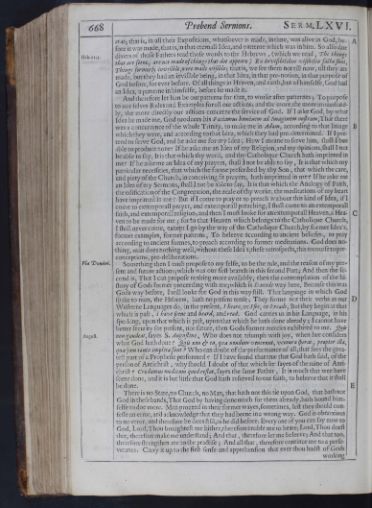 668
Prebend Sermons.
Serm. LXVI.
erat; that is, in all their Expositions, whatsoever is made, in time, was alive in God, be-
668
Prebend Sermons.
Serm. LXVI.
erat; that is, in all their Expositions, whatsoever is made, in time, was alive in God, be-fore it was made, that is, in that eternall Idea, and patterne which was in him. So also doe
divers of those Fathers read those words to the Hebrews, Heb. 11. 3. (which we read, The things
that are seene, are not made of things that doe appeare) Ex invisibilibus visibilia facta sunt,
Things formerly invisible, were made visible; that is, we see them not till now, till they are
made, but they had an invisible being, in that Idea, in that pre-notion, in that purpose of
God before, for ever before. Of all things in Heaven, and earth, but of himselfe, God had
an Idea, a patterne in himselfe, before he made it. And therefore let him be our patterne for that, to worke after patternes; To propose
to our selves Rules and Examples for all our actions; and the more, the more immediate-
ly, the more directly our actions concerne the service of God. If I aske God, by what
Idea he made me, God produces his Faciamus hominem ad Imaginem nostram, That there
was a concurrence of the whole Trinity, to make me in Adam, according to that Image
which they were, and according to that Idea, which they had pre-determined. If I pre-
tend to serve God, and he aske me for my Idea, How I meane to serve him, shall I bee
able to produce none? If he aske me an Idea of my Religion, and my opinions, shall I not
be able to say, It is that which thy word, and thy Catholique Church hath imprinted in
me? If he aske me an Idea of my prayers, shall I not be able to say, It is that which my
particular necessities, that which the forme prescribed by thy Son, that which the care,
and piety of the Church, in conceiving fit prayers, hath imprinted in me? If he aske me
an Idea of my Sermons, shall I not be able to say, It is that which the Analogy of Faith,
the edification of the Congregation, the zeale of thy worke, the meditations of my heart
have imprinted in me? But if I come to pray or to preach without this kind of Idea, if I
come to extemporall prayer, and extemporall preaching, I shall come to an extemporall
faith, and extemporall religion; and then I must looke for an extemporall Heaven, a Hea-
ven to be made for me; for to that Heaven which belongs to the Catholique Church,
I shall never come, except I go by the way of the Catholique Church, by former Idea's,
former examples, former patterns, To beleeve according to ancient beliefes, to pray
according to ancient formes, to preach according to former meditations. God does no-
thing, man does nothing well, without these Idea's, these retrospects, this recourse to pre-
conceptions, pre-deliberations. Something then I must propose to my selfe, Via Domini. to be the rule, and the reason of my pre-
sent and future actions; which was our first branch in this second Part; And then the se-
cond is, That I can propose nothing more availably, then the contemplation of the hi-
story of Gods former proceeding with me; which is Davids way here, Because this was
Gods way before, I will looke for God in this way still. That language in which God
spake to man, the Hebrew, hath no present tense; They forme not their verbs as our
Westerne Languages do, in the present, I heare, or I see, or I reade, But they begin at that
which is past, I have seene and heard, and read. God carries us in his Language, in his
speaking, upon that which is past, upon that which he hath done already; I cannot have
better security for present, nor future, then Gods former mercies exhibited to me. Quis
non gaudeat,August. sayes S. Augustine, Who does not triumph with joy, when hee considers
what God hath done? Quis non & ea, quæ nondum venerunt, ventura sperat, propter illa,
quæ jam tanta impleta sunt? Who can doubt of the performance of all, that sees the grea-
test part of a Prophesie performed? If I have found that true that God hath said, of the
person of Antichrist, why should I doubt of that which he sayes of the ruine of Anti-
christ? Credamus modicum quod restat, sayes the same Father, It is much that wee have
seene done, and it is but little that God hath reserved to our faith, to beleeve that it shall
be done. There is no State, no Church, no Man, that hath not this tie upon God, that hath not
God in these bands, That God by having done much for them already, hath bound him-
selfe to doe more. Men proceed in their former wayes, sometimes, lest they should con-
fesse an error, and acknowledge that they had beene in a wrong way. God is obnoxious
to no error, and therefore he does still, as he did before. Every one of you can say now to
God, Lord, Thou broughtest me hither, therefore enable me to heare; Lord, Thou doest
that, therefore make me understand; And that, therefore let me beleeve; And that too,
therefore strengthen me to the practise; And all that, therefore continue me to a perse-
verance. Carry it up to the first sense and apprehension that ever thou hadst of Gods working
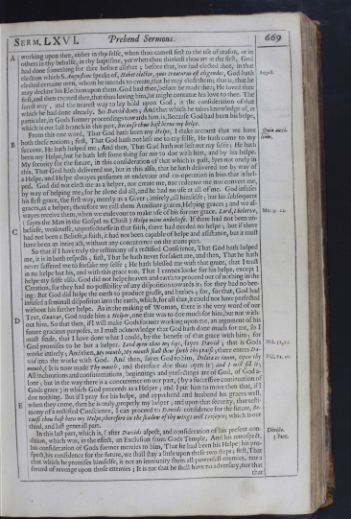 Serm. LXVI.
Prebend Sermons.
669
working upon thee, either in thy selfe, when thou camest first to the use of reason, or in
Serm. LXVI.
Prebend Sermons.
669
working upon thee, either in thy selfe, when thou camest first to the use of reason, or in
others in thy behalfe, in thy baptisme, yet when thou thinkest thou art at the first, God
had done something for thee before all that; before that, hee had elected thee, in that
election which S. Augustine speaks of, Habet electos, quos creaturus est eligendos,August. God hath
elected certaine men, whom he intends to create, that he may elect them; that is, that he
may declare his Election upon them. God had thee, before he made thee; He loved thee
first, and then created thee, that thou loving him, he might continue his love to thee. The
surest way, and the nearest way to lay hold upon God, is the consideration of that
which he had done already. So David does; And that which he takes knowledge of, in
particular, in Gods former proceedings towards him, is, Because God had been his helpe,
which is our last branch in this part, Because thou hast beene my helpe. From this one word, That God hath been my Helpe, Quia auxi-
lium. I make account that we have
both these notions; first, That God hath not left me to my selfe, He hath come to my
succour, He hath helped me; And then, That God hath not left out my selfe; He hath
been my Helpe, but he hath left some thing for me to doe with him, and by his helpe.
My security for the future, in this consideration of that which is past, lyes not onely in
this, That God hath delivered me, but in this also, that he hath delivered me by way of
a Helpe, and Helpe alwayes presumes an endevour and co-operation in him that is hel-
ped. God did not elect me as a helper, nor create me, nor redeeme me nor convert me,
by way of helping me; for he alone did all, and he had no use at all of me. God infuses
his first grace, the first way, meerly as a Giver; intirely, all himselfe; but his subsequent
graces, as a helper; therefore we call them Auxiliant graces, Helping graces; and we al-
wayes receive them, when we endevour to make use of his former grace. Lord, I beleeve, Mar. 9. 24.
(sayes the Man in the Gospel to Christ) Helpe mine unbeliefe. If there had not been un-
beliefe, weaknesse, unperfectnesse in that faith, there had needed no helpe; but if there
had not been a Beliefe, a faith, it had not been capable of helpe and assistance, but it must
have been an intire act, without any concurrence on the mans part. So that if I have truly the testimony of a rectified Conscience, That God hath helped
me, it is in both respects; first, That he hath never forsaken me, and then, That he hath
never suffered me to forsake my selfe; He hath blessed me with that grace, that I trust
in no helpe but his, and with this grace too, That I cannot looke for his helpe, except I
helpe my selfe also. God did not helpe heaven and earth to proceed out of nothing in the
Creation, for they had no possibility of any disposition towards it; for they had no bee-
ing: But God did helpe the earth to produce grasse, and herbes; for, for that, God had
infused a seminall disposition into the earth, which, for all that, it could not have perfected
without his farther helpe. As in the making of Woman, there is the very word of our
Text, Gnazar, God made him a Helper, one that was to doe much for him, but not with-
out him. So that then, if I will make Gods former working upon me, an argument of his
future gracious purposes, as I must acknowledge that God hath done much for me, so I
must finde, that I have done what I could, by the benefit of that grace with him; for
God promises to be but a helper. Lord open thou my lips, sayes David; Psal. 51. 15. that is Gods
worke intirely; And then, My mouth, My mouth shall shew forth thy praise; there enters Da-
vid into the worke with God. And then, sayes God to him, Dilata os tuum, Open thy
mouth, (It is now made Thy mouth, and therefore doe thou open it) and I will fill it;
All inchoations and consummations, beginnings and perfectings are of God, of God a-
lone; but in the way there is a concurrence on our part, (by a successive continuation of
Gods grace) in which God proceeds as a Helper; and I put him to more then that, if I
doe nothing. But if I pray for his helpe, and apprehend and husband his graces well,
when they come, then he is truly, properly my helper; and upon that security, that testi-
mony of a rectified Conscience, I can proceed to Davids confidence for the future, Be-
cause thou hast been my Helpe, therefore in the shadow of thy wings will I rejoyce; which is our
third, and last generall part. In this last part, which is, (after Davids aspect, and consideration of his present Divisio. con-
dition, 3 Part. which was, in the effect, an Exclusion from Gods Temple, And his retrospect,
his consideration of Gods former mercies to him, That he had been his Helpe) his pro-
spect, his confidence for the future, we shall stay a little upon these two steps; first, That
that which he promises himselfe, is not an immunity from all powerfull enemies, nor a
sword of revenge upon those enemies; It is not that he shall have no adversary, nor that that
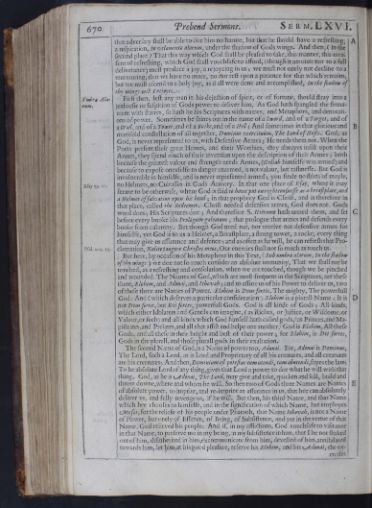 670
Prebend Sermons.
Serm. LXVI.
that adversary shall be able to doe him no harme, but that he should have a refreshing,
670
Prebend Sermons.
Serm. LXVI.
that adversary shall be able to doe him no harme, but that he should have a refreshing,
a respiration, In velamento alarum, under the shadow of Gods wings. And then, (in the
second place) That this way which God shall be pleased to take, this manner, this mea-
sure of refreshing, which God shall vouchsafe to afford, (though it amount not to a full
deliverance) must produce a joy, a rejoycing in us; we must not onely not decline to a
murmuring, that we have no more, no nor rest upon a patience for that which remains,
but we must ascend to a holy joy, as if all were done and accomplished, In the shadow of
thy wings will I rejoyce. First then, Vmbra Ala-
rum. lest any man in his dejection of spirit, or of fortune, should stray into a
jealousie or suspition of Gods power to deliver him, As God hath spangled the firma-
ment with starres, so hath he his Scriptures with names, and Metaphors, and denotati-
ons of power. Sometimes he shines out in the name of a Sword, and of a Target, and of
a Wall, and of a Tower, and of a Rocke, and of a Hill; And sometimes in that glorious and
manifold constellation of all together, Dominus exercituum, The Lord of Hosts. God, as
God, is never represented to us, with Defensive Armes; He needs them not. When the
Poets present their great Heroes, and their Worthies, they alwayes insist upon their
Armes, they spend much of their invention upon the description of their Armes; both
because the greatest valour and strength needs Armes, (Goliah himselfe was armed) and
because to expose ones selfe to danger unarmed, is not valour, but rashnesse. But God is
invulnerable in himselfe, and is never represented armed; you finde no shirts of mayle,
no Helmets, Esay 59. 17. no Cuirasses in Gods Armory. In that one place of Esay, where it may
seeme to be otherwise, where God is said to have put on righteousnesse as a breastplate, and
a Helmet of salvation upon his head; in that prophecy God is Christ, and is therefore in
that place, called the Redeemer. Christ needed defensive armes, God does not. Gods
word does; His Scriptures doe; And therefore S. Hierome hath armed them, and set
before every booke his Prologum galeatum, that prologue that armes and defends every
booke from calumny. But though God need not, nor receive not defensive armes for
himselfe, yet God is to us a Helmet, a Breastplate, a strong tower, a rocke, every thing
that may give us assurance and defence; and as often as he will, he can refresh that Pro-
clamation, Nolite tangere Christos meos,Psal. 105. 15. Our enemies shall not so much as touch us. But here, by occasion of his Metaphore in this Text, (Sub umbra alarum, In the shadow
of thy wings) we doe not so much consider an absolute immunity, That we shall not be
touched, as a refreshing and consolation, when we are touched, though we be pinched
and wounded. The Names of God, which are most frequent in the Scriptures, are these
three, Elohim, and Adonai, and Iehovah; and to assure us of his Power to deliver us, two
of these three are Names of Power. Elohim is Deus fortis, The mighty, The powerfull
God: And (which deserves a particular consideration) Elohim is a plurall Name; It is
not Deus fortis, but Dii fortes, powerfull Gods. God is all kinde of Gods; All kinds,
which either Idolaters and Gentils can imagine, (as Riches, or Justice, or Wisdome, or
Valour, or such) and all kinds which God himself hath called gods, (as Princes, and Ma-
gistrates, and Prelates, and all that assist and helpe one another) God is Elohim, All these
Gods, and all these in their height and best of their power; for Elohim, is Dii fortes,
Gods in the plurall, and those plurall gods in their exaltation. The second Name of God, is a Name of power too, Adonai. For, Adonai is Dominus,
The Lord, such a Lord, as is Lord and Proprietary of all his creatures, and all creatures
are his creatures; And then, Dominium est potestas tum utendi, tum abutendi, sayes the law;
To be absolute Lord of any thing, gives that Lord a power to doe what he will with that
thing. God, as he is Adonai, The Lord, may give and take, quicken and kill, build and
throw downe, where and whom he will. So then two of Gods three Names are Names
of absolute power, to imprint, and re-imprint an assurance in us, that hee can absolutely
deliver us, and fully revenge us, if he will. But then, his third Name, and that Name
which hee chooses to himselfe, and in the signification of which Name, hee employes
Moses, for the reliefe of his people under Pharaoh, that Name Iehovah, is not a Name
of Power, but onely of Essence, of Being, of Subsistence, and yet in the vertue of that
Name, God relieved his people. And if, in my afflictions, God vouchsafe to visit mee
in that Name, to preserve me in my being, in my subsistence in him, that I be not shaked
out of him, disinherited in him, excommunicate from him, devested of him, annihilated
towards him, let him, at his good pleasure, reserve his Elohim, and his Adonai, the ex-
ercises
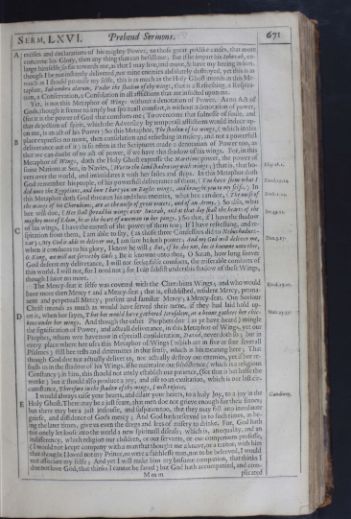 Serm. LXVI.
Prebend Sermons.
671
ercises and declarations of his mighty Power, to those great puklikepublike causes, that more
Serm. LXVI.
Prebend Sermons.
671
ercises and declarations of his mighty Power, to those great puklikepublike causes, that more
concerne his Glory, then any thing that can befall me; But if he impart his Iehovah, en-
large himselfe so far towards me, as that I may live, and move, & have my beeing in him,
though I be not instantly delivered, nor mine enemies absolutely destroyed, yet this is as
much as I should promise my selfe, this is as much as the Holy Ghost intends in this Me-
taphor, Sub umbra alarum, Vnder the shadow of thy wings, that is a Refreshing, a Respira-
tion, a Conservation, a Consolation in all afflictions that are inflicted upon me. Yet, is not this Metaphor of Wings without a denotation of Power. As no Act of
Gods, though it seeme to imply but spirituall comfort, is without a denotation of power,
(for it is the power of God that comforts me; To overcome that sadnesse of soule, and
that dejection of spirit, which the Adversary by temporall afflictions would induce up-
on me, is an act of his Power) So this Metaphor, The shadow of his wings, (which in this
place expresses no more, then consolation and refreshing in misery, and not a powerfull
deliverance out of it) is so often in the Scriptures made a denotation of Power too, as
that we can doubt of no act of power, if we have this shadow of his wings. For, in this
Metaphor of Wings, doth the Holy Ghost expresse the Maritime power, the power of
some Nations at Sea, in Navies, (Woe to the land shadowing with wings;) that is, Esay 18. 1. that ho-
vers over the world, and intimidates it with her sailes and ships. In this Metaphor doth
God remember his people, of his powerfull deliverance of them, Exod. 19. 14. (You have seene what I
did unto the Egyptians, and how I bare you on Eagles wings, and brought you to my selfe.) In
this Metaphor doth God threaten his and their enemies, what hee can doe, Ezek. 1. 24. (The noise of
the wings of his Cherubims, are as the noise of great waters, and of an Army.) So also, what
hee will doe, (Hee shall spread his wings over Bozrah,Ier. 49. 22. and at that day shall the hearts of the
mighty men of Edom, be as the heart of a woman in her pangs.) So that, if I have the shadow
of his wings, I have the earnest of the power of them too; If I have refreshing, and re-
spiration from them, I am able to say, (as those three Confessors did to Nebuchadnez-
zar) My God is able to deliver me, I am sure he hath power;Dan. 3. 17. And my God will deliver me,
when it conduces to his glory, I know he will; But, if he doe not, bee it knowne unto thee,
O King, we will not serve thy Gods; Be it knowne unto thee, O Satan, how long soever
God deferre my deliverance, I will not seeke false comforts, the miserable comforts of
this world. I will not, for I need not; for I can subsist under this shadow of these Wings,
though I have no more. The Mercy-seat it selfe was covered with the Cherubims Wings;Exod. 25. 20. and who would
have more then Mercy? and a Mercy-seat; that is, established, resident Mercy, perma-
nent and perpetuall Mercy; present and familiar Mercy: a Mercy-seat. Our Saviour
Christ intends as much as would have served their turne, if they had laid hold up-
on it, when hee sayes, That hee would have gathered Ierusalem,Matt. 23. 37. as a henne gathers her chic-
kens under her wings. And though the other Prophets doe (as ye have heard) mingle
the signification of Power, and actuall deliverance, in this Metaphor of Wings, yet our
Prophet, whom wee have now in especiall consideration, David, never doth so; but in
every place where hee uses this Metaphor of Wings (which are in five or sixe severall
Psalmes) still hee rests and determines in that sense, which is his meaning here; That
though God doe not actually deliver us, nor actually destroy our enemies, yet if hee re-
fresh us in the shadow of his Wings, if he maintaine our subsistence (which is a religious
Constancy) in him, this should not onely establish our patience, (for that is but halfe the
worke) but it should also produce a joy, and rise to an exultation, which is our last cir-
cumstance, Therefore in the shadow of thy wings, I will rejoice. I would always raise your hearts, and dilate your hearts, to a holy Joy, Gaudium. to a joy in the
Holy Ghost. There may be a just feare, that men doe not grieve enough for their sinnes;
but there may bee a just jealousie, and suspition too, that they may fall into inordinate
griefe, and diffidence of Gods mercy; And God hath reserved us to such times, as be-
ing the later times, give us even the dregs and lees of misery to drinke. For, God hath
not onely let loose into the world a new spirituall disease; which is, an equality, and an
indifferency, which religion our children, or our servants, or our companions professe;
(I would not keepe company with a man that thought me a knave, or a traitor; with him
that thought I loved not my Prince, or were a faithlesse man, not to be beleeved, I would
not associate my selfe; And yet I will make him my bosome companion, that thinks I
doe not love God, that thinks I cannot be saved) but God hath accompanied, and com-
Mmm plicated
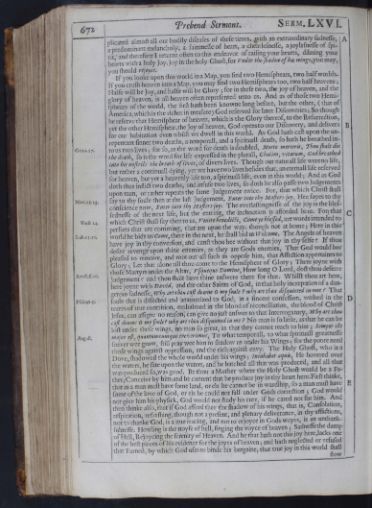 672
Prebend Sermons.
Serm. LXVI.
plicated almost all our bodily diseases of these times, with an extraordinary sadnesse,
672
Prebend Sermons.
Serm. LXVI.
plicated almost all our bodily diseases of these times, with an extraordinary sadnesse,
a predominant melancholy, a faintnesse of heart, a chearlesnesse, a joylesnesse of spi-
rit, and therefore I returne often to this endeavor of raising your hearts, dilating your
hearts with a holy Joy, Joy in the holy Ghost, for Vnder the shadow of his wings, you may,
you should rejoyce.
If you looke upon this world in a Map, you find two Hemisphears, two half worlds.
If you crush heaven into a Map, you may find two Hemisphears too, two half heavens;
Halfe will be Joy, and halfe will be Glory; for in these two, the joy of heaven, and the
glory of heaven, is all heaven often represented unto us. And as of those two Hemi-
sphears of the world, the first hath been knowne long before, but the other, (that of
America, which is the richer in treasure) God reserved for later Discoveries; So though
he reserve that Hemisphear of heaven, which is the Glory thereof, to the Resurrection,
yet the other Hemisphear, the Joy of heaven, God opens to our Discovery, and delivers
for our habitation even whilst we dwell in this world. As God hath cast upon the un-
repentant sinner two deaths, a temporall, and a spirituall death, so hath he breathed in-
to us two lives;Gen. 2.17. for so, as the word for death is doubled, Morte morieris, Thou shalt die
the death, so is the word for life expressed in the plurall, Chaiim, vitarum, God breathed
into his nostrils the breath of lives, of divers lives. Though our naturall life were no life,
but rather a continuall dying, yet we have two lives besides that, an eternall life reserved
for heaven, but yet a heavenly life too, a spirituall life, even in this world; And as God
doth thus inflict two deaths, and infuse two lives, so doth he also passe two Judgements
upon man, or rather repeats the same Judgement twice. For, that which Christ shall
say to thy soule then at the last Judgement, Matt. 25.23. Enter into thy Masters joy, Hee sayes to thy
conscience now, Enter into thy Masters joy. The everlastingnesse of the joy is the bles-
sednesse of the next life, but the entring, the inchoation is afforded here. For that
which Christ shall say then to us, Verse 24. Venite benedicti, Come ye blessed, are words intended to
persons that are comming, that are upon the way, though not at home; Here in this
world he bids us Come,Luk. 15.10. there in the next, he shall bid us Welcome. The Angels of heaven
have joy in thy conversion, and canst thou bee without that joy in thy selfe? If thou
desire revenge upon thine enemies, as they are Gods enemies, That God would bee
pleased to remove, and root out all such as oppose him, that Affection appertaines to
Glory; Let that alone till thou come to the Hemisphear of Glory; There joyne with
those Martyrs under the Altar, Revel. 6.10. Vsquequo Domine, How long O Lord, dost thou deferre
Judgement? and thou shalt have thine answere there for that. Whilst thou art here,
here joyne with David, and the other Saints of God, in that holy increpation of a dan-
gerous sadnesse, Why art thou cast downe O my soule? why art thou disquieted in mee? That
soule that is dissected and anatomized to God, Psal. 42.5. in a sincere confession, washed in the
teares of true contrition, embalmed in the blood of reconciliation, the blood of Christ
Jesus, can assigne no reason, can give no just answer to that Interrogatory, Why art thou
cast downe O my soule? why art thou disquieted in me? No man is so little, as that he can be
lost under these wings, no man so great, as that they cannot reach to him; Semper ille
major est,August. quantumcumque creverimus, To what temporall, to what spirituall greatnesse
soever wee grow, still pray wee him to shadow us under his Wings; for the poore need
those wings against oppression, and the rich against envy. The Holy Ghost, who is a
Dove, shadowed the whole world under his wings; Incubabat aquis, He hovered over
the waters, he sate upon the waters, and he hatched all that was produced, and all that
was produced so, was good. Be thou a Mother where the Holy Ghost would be a Fa-
ther; Conceive by him; and be content that he produce joy in thy heart here. First thinke,
that as a man must have some land, or els he cannot be in wardship, so a man must have
some of the love of God, or els he could not fall under Gods correction; God would
not give him his physick, God would not study his cure, if he cared not for him. And
then thinke also, that if God afford thee the shadow of his wings, that is, Consolation,
respiration, refreshing, though not a present, and plenary deliverance, in thy afflictions,
not to thanke God, is a murmuring, and not to rejoyce in Gods wayes, is an unthank-
fulnesse. Howling is the noyse of hell, singing the voyce of heaven; Sadnesse the damp
of Hell, Rejoycing the serenity of Heaven. And he that hath not this joy here, lacks one
of the best pieces of his evidence for the joyes of heaven; and hath neglected or refused
that Earnest, by which God uses to binde his bargaine, that true joy in this world shall flow
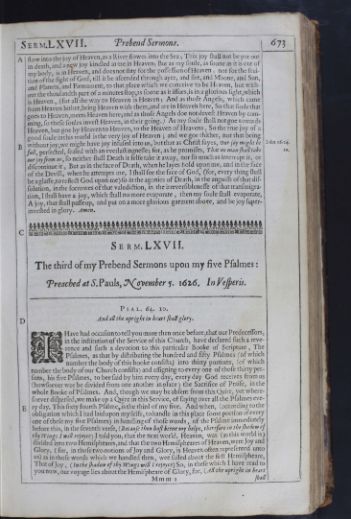 Serm. LXVII.
Prebend Sermons.
673
flow into the joy of Heaven, as a River flowes into the Sea; This joy shall not be put out
Serm. LXVII.
Prebend Sermons.
673
flow into the joy of Heaven, as a River flowes into the Sea; This joy shall not be put out
in death, and a new joy kindled in me in Heaven; But as my soule, as soone as it is out of
my body, is in Heaven, and does not stay for the possession of Heaven, nor for the frui-
tion of the sight of God, till it be ascended through ayre, and fire, and Moone, and Sun,
and Planets, and Firmament, to that place which we conceive to be Heaven, but with-
out the thousandth part of a minutes stop, as soone as it issues, is in a glorious light, which
is Heaven, (for all the way to Heaven is Heaven; And as those Angels, which came
from Heaven hither, bring Heaven with them, and are in Heaven here, So that soule that
goes to Heaven, meets Heaven here; and as those Angels doe not devest Heaven by com-
ming, so these soules invest Heaven, in their going.) As my soule shall not goe towards
Heaven, but goe by Heaven to Heaven, to the Heaven of Heavens, So the true joy of a
good soule in this world is the very joy of Heaven; and we goe thither, not that being
without joy, we might have joy infused into us, but that as Christ sayes, Iohn 16.24.
22. Our joy might be
full, perfected, sealed with an everlastingnesse; for, as he promises, That no man shall take
our joy from us, so neither shall Death it selfe take it away, nor so much as interrupt it, or
discontinue it, But as in the face of Death, when he layes hold upon me, and in the face
of the Devill, when he attempts me, I shall see the face of God, (for, every thing shall
be a glasse, to reflect God upon me) so in the agonies of Death, in the anguish of that dis-
solution, in the sorrowes of that valediction, in the irreversiblenesse of that transmigra-
tion, I shall have a joy, which shall no more evaporate, then my soule shall evaporate,
A joy, that shall passe up, and put on a more glorious garment above, and be joy super-
invested in glory. Amen.
Serm. LXVII.
The third of my Prebend Sermons upon my five Psalmes:
Preached at S. Pauls, November 5. 1626. In Vesperis.
Psal. 64.10.
And all the upright in heart shall glory.
I Have had occasion to tell you more then once before, that our Predecessors,
in the institution of the Service of this Church, have declared such a reve-
rence and such a devotion to this particular Booke of Scripture, The
Psalmes, as that by distributing the hundred and fifty Psalmes (of which
number the body of this booke consists) into thirty portions, (of which
number the body of our Church consists) and assigning to every one of those thirty per-
sons, his five Psalmes, to bee said by him every day, every day God receives from us
(howsoever wee be divided from one another in place) the Sacrifice of Praise, in the
whole Booke of Psalmes. And, though we may be absent from this Quire, yet where-
soever dispersed, we make up a Quire in this Service, of saying over all the Psalmes eve-
ry day. This sixty fourth Psalme, is the third of my five. And when, (according to the
obligation which I had laid upon my selfe, to handle in this place some portion of every
one of these my five Psalmes) in handling of those words, of the Psalme immediately
before this, in the seventh verse, (Because thou hast beene my helpe, therefore in the shadow of
thy Wings I will rejoyce) I told you, that the next world, Heaven, was (as this world is)
divided into two Hemispheares, and that the two Hemispheares of Heaven, were Joy and
Glory, (for, in those two notions of Joy and Glory, is Heaven often represented unto
us) as in those words which we handled then, wee sailed about the first Hemispheare,
That of Joy, (In the shadow of thy Wings will I rejoyce) So, in these which I have read to
you now, our voyage lies about the Hemispheare of Glory, for, (All the upright in heart Mmm2 shall
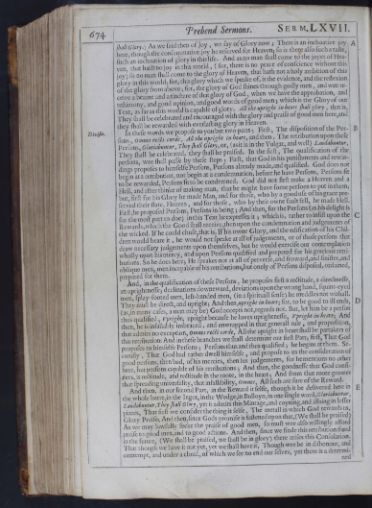 674
Prebend Sermons.
Serm. LXVII.
shall Glory.) As we said then of Joy, we say of Glory now; There is an inchoative joy
674
Prebend Sermons.
Serm. LXVII.
shall Glory.) As we said then of Joy, we say of Glory now; There is an inchoative joy
here, though the consummative joy be reserved for Heaven; so is there also such a taste,
such an inchoation of glory in this life. And as no man shall come to the joyes of Hea-
ven, that hath no joy in this world, (for, there is no peace of conscience without this
joy) so no man shall come to the glory of Heaven, that hath not a holy ambition of this
glory in this world; for, this glory which we speake of, is the evidence, and the reflexion
of the glory from above; for, the glory of God shines through godly men, and wee re-
ceive a beame and a tincture of that glory of God, when we have the approbation, and
testimony, and good opinion, and good words of good men; which is the Glory of our
Text, as far as this world is capable of glory. All the upright in heart shall glory, that is,
They shall be celebrated and encouraged with the glory and praise of good men here, and
they shall be rewarded with everlasting glory in Heaven.
In these words we propose to you but two parts;Divisio. First, The disposition of the Per-
sons, Omnes recti corde, All the upright in heart, and then, The retribution upon these
Persons, Gloriabuntur, They shall Glory, or, (as it is in the Vulgat, and well) Laudabuntur,
They shall be celebrated, they shall be praised. In the first, The qualification of the
persons, wee shall passe by these steps; First, that God in his punishments and rewar-
dings proposes to himselfe Persons, Persons already made, and qualified. God does not
begin at a retribution, nor begin at a condemnation, before he have Persons, Persons fit
to be rewarded, Persons fit to be condemned. God did not first make a Heaven and a
Hell, and after thinke of making man, that he might have some persons to put in them;
but, first for his Glory he made Man, and for those, who by a good use of his grace pre-
served their state, Heaven, and for those, who by their owne fault fell, he made Hell.
First, he proposed Persons, Persons in being; And then, for the Persons (as his delight is
for the most part to doe) in this Text he expresses it; which is, rather to insist upon the
Rewards, which the Good shall receive, then upon the condemnation and judgements of
the wicked. If he could chuse, that is, If his owne Glory, and the edification of his Chil-
dren would beare it, he would not speake at all of judgements, or of those persons that
draw necessary judgements upon themselves, but he would exercise our contemplation
wholly upon his mercy, and upon Persons qualified and prepared for his gracious retri-
butions. So he does here; He speakes not at all of perverse, and froward, and sinister, and
oblique men, men incapable of his retributions, but onely of Persons disposed, ordained,
prepared for them.
And, in the qualification of these Persons, he proposes first a rectitude, a directnesse,
an uprightnesse; declinations downeward, deviations upon the wrong hand, squint-eyed
men, splay-footed men, left-handed men, (in a spirituall sense) he meddles not withall.
They must be direct, and upright; And then, upright in heart; for, to be good to ill ends,
(as, in many cases, a man may be) God accepts not, regards not. But, let him be a person
thus qualified, Vpright; upright because he loves uprightnesse, Vpright in heart; And
then, he is infallably imbraced, and enwrapped in that generall rule, and proposition,
that admits no exception, Omnes recti corde, All the upright in heart shall be partakers of
this retribution: And in these branches we shall determine our first Part; first, That God
proposes to himselfe Persons; Persons thus and thus qualified; he begins at them. Se-
condly, That God had rather dwell himselfe, and propose to us the consideration of
good persons, then bad, of his mercies, then his judgements, for he mentions no other
here, but persons capable of his retributions; And then, the goodnesse that God consi-
ders, is rectitude, and rectitude in the roote, in the heart; And from that roote growes
that spreading universality, that infallibility, Omnes, All such are sure of the Reward.
And then, in our second Part, in the Reward it selfe, though it be delivered here in
the whole barre, in the Ingot, in the Wedge, in Bulloyn, in one single word, Gloriabuntur,
Laudabuntur, They shall Glory, yet it admits this Mintage, and coyning, and issuing in lesser
pieces, That first we consider the thing it selfe, The metall in which God rewards us,
Glory Praise; And then, since Gods promise is fastened upon that, (We shall be praised)
As we may lawfully seeke the praise of good men, so must wee also willingly afford
praise to good men, and to good actions. And then, since we finde this retribution fixed
in the future, (We shall be praised, we shall be in glory) there arises this Consolation,
That though we have it not yet, yet we shall have it, Though wee be in dishonour, and
contempt, and under a cloud, of which we see no end our selves, yet there is a determi-
ned
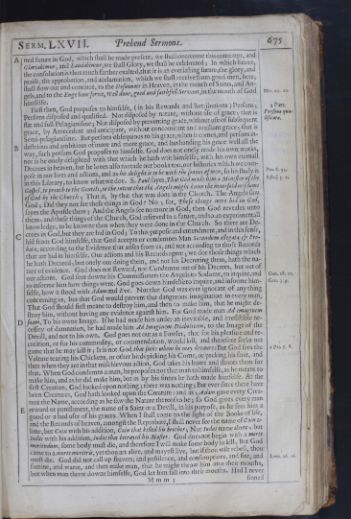 Serm. LXVII.
Prebend Sermons.
675
ned future in God, which shall be made present, we shall overcome this contempt, and
Serm. LXVII.
Prebend Sermons.
675
ned future in God, which shall be made present, we shall overcome this contempt, and
Gloriabimur, and Laudabimur, we shall Glory, we shall be celebrated; In which future,
the consolation is thus much farther exalted, that it is an everlasting future; the glory, and
praise, the approbation, and acclamation, which we shall receive from good men, here,
shall flow out and continue, to the Hosannaes in Heaven, in the mouth of Saints, and An-
gels, and to the Euge bone serve, Well done, good and faithfull Servant, Mat. 25.21. in the mouth of God
himselfe.
First then, God proposes to himselfe, (in his Rewards and Retributions) Persons;1 Part.
Persons disposed and qualified. Not disposed by nature, without use of grace; that is Personæ qua-
lificatæ.
flat and full Pelagianisme; Not disposed by preventing grace, without use of subsequent
grace, by Antecedent and anticipant, without concomitant and auxiliant grace; that is
Semi-pelagianisme. But persons obsequious to his grace, when it comes, and persons in-
dustrious and ambitious of more and more grace, and husbanding his grace well all the
way, such persons God proposes to himselfe. God does not onely reade his own works,
nor is he onely delighted with that which he hath writ himselfe, with his own eternall
Decrees in heaven, but he loves also to reade our books too, our histories which we com-
pose in our lives and actions, and as his delight is to be with the sonnes of men,Pro. 8.31. so his study is
in this Library, to know what we doe. S. Paul sayes, Ephes. 3.7. That God made him a Minister of the
Gospel, to preach to the Gentils, to the intent that the Angels might know the manifold wisdome
of God by the Church; That is, by that that was done in the Church. The Angels saw
God; Did they not see these things in God? No; for, These things were hid in God,
sayes the Apostle there; And the Angels see no more in God, then God reveales unto
them; and these things of the Church, God reserved to a future, and to an experimentall
knowledge, to be knowne then when they were done in the Church. So there are De-
crees in God, but they are hid in God; To this purpose and entendment, and in this sense,
hid from God himselfe, that God accepts or condemnes Man Secundum allegata & Pro-
bata, according to the Evidence that arises from us, and not according to those Records
that are hid in himselfe. Our actions and his Records agree; we doe those things which
he hath Decreed; but onely our doing them, and not his Decreeing them, hath the na-
ture of evidence. God does not Reward, nor Condemne out of his Decrees, but out of
our actions. God sent downe his Commissioners the Angels to Sodome, to inquire, Gen. 18.17. and
to informe him how things went. God goes down himselfe to inquire, Gen. 3.9. and informe him-
selfe, how it stood with Adam and Eve. Not that God was ever ignorant of any thing
concerning us, but that God would prevent that dangerous imagination in every man,
That God should first meane to destroy him, and then to make him, that he might de-
stroy him, without having any evidence against him. For God made man Ad imaginem
suam, To his owne Image. If he had made him under an inevitable, and irresistible ne-
cessity of damnation, he had made him Ad Imaginem Diabolicam, to the Image of the
Devill, and not to his own. God goes not out as a Fowler, that for his pleasure and re-
creation, or for his commodity, or commendation, would kill, and therefore seeks out
game that he may kill it; It is not God that seeks whom he may devoure:1 Pet. 5.8. But God sees the
Vulture tearing his Chickens, or other birds picking his Corne, or pecking his fruit, and
then when they are in that mischievous action, God takes his bowe and shoots them for
that. When God condemns a man, he proposes not that man to himselfe, as he meant to
make him, and as he did make him, but as by his sinnes he hath made himselfe. At the
first Creation, God looked upon nothing; there was nothing; But ever since there have
been Creatures, God hath looked upon the Creature: and as Adam gave every Crea-
ture the Name, according as he saw the Nature thereof to be; so God gives every man
reward or punishment, the name of a Saint or a Devill, in his purpose, as he sees him a
good or a bad user of his graces. When I shall come to the sight of the Booke of life,
and the Records of heaven, amongst the Reprobate, I shall never see the name of Cain a-
lone, but Cain with his addition, Cain that killed his brother; Nor Iudas name alone; but
Iudas with his addition, Iudas that betrayed his Master. God does not begin with a morte
moriendum, some body must die, and therefore I will make some body to kill; But God
came to a morte morieris, yet thou art alive, and mayest live, but if thou wilt rebell, thou
must die. God did not call up feavers, and pestilence, and consumptions, and fire, Levit. 26.16. and
famine, and warre, and then make man, that he might throw him into their mouths,
but when man threw downe himselfe, God let him fall into their mouths. Had I never Mmm3 sinned
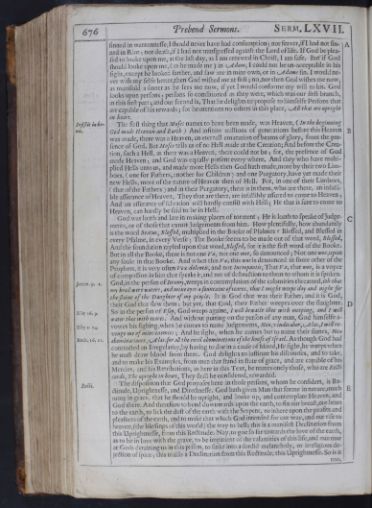 676
Prebend Sermons.
Serm. LXVII.
sinned in wantonnesse, I should never have had consumption; nor feaver, if I had not sin-
676
Prebend Sermons.
Serm. LXVII.
sinned in wantonnesse, I should never have had consumption; nor feaver, if I had not sin-ned in Riot; nor death, if I had not transgressed against the Lord of life. If God be plea-
sed to looke upon me, at the last day, as I am renewed in Christ, I am safe. But if God
should looke upon me, (as he made me) in Adam, I could not be un-acceptable in his
sight, except he looked farther, and saw me in mine own, or in Adams sin. I would ne-
ver wish my selfe better, then God wished me at first; no, nor then God wishes me now,
as manifold a sinner as he sees me now, if yet I would conforme my will to his. God
looks upon persons; persons so conditioned as they were, which was our first branch,
in this first part; and our second is, That he delights to propose to himselfe Persons that
are capable of his rewards; for he mentions no others in this place, All that are upright
in heart.
The first thing that Moses names to have been made, Insistit in bo-
nis. was Heaven, (In the beginning
God made Heaven and Earth) And infinite millions of generations before this Heaven
was made, there was a Heaven, an eternall emanation of beams of glory, from the pre-
sence of God. But Moses tells us of no Hell made at the Creation; And before the Crea-
tion, such a Hell, as there was a Heaven, there could not be; for, the presence of God
made Heaven; and God was equally present every where. And they who have multi-
plied Hells unto us, and made more Hells then God hath made, more by their two Lim-
boes, (one for Fathers, another for Children) and one Purgatory, have yet made their
new Hells, more of the nature of Heaven then of Hell. For, in one of their Limboes,
(that of the Fathers) and in their Purgatory, there is in them, who are there, an infalli-
ble assurance of Heaven, They that are there, are infallibly assured to come to Heaven;
And an assurance of salvation will hardly consist with Hell; He that is sure to come to
Heaven, can hardly be said to be in Hell.
God was loath and late in making places of torment; He is loath to speake of Judge-
ments, or of those that extort Judgements from him. How plentifully, how abundantly
is the word Beatus, Blessed, multiplied in the Booke of Psalmes? Blessed, and Blessed in
every Psalme, in every Verse; The Booke seems to be made out of that word, Blessed,
And the foundation raysed upon that word, Blessed, for it is the first word of the Booke.
But in all the Booke, there is not one Væ, not one woe, so denounced; Not one woe, upon
any soule in that Booke. And when this Væ, this woe is denounced in some other of the
Prophets, it is very often Vox dolentis, and not Increpantis, That Væ, that woe, is a voyce
of compassion in him that speaks it, and not of destruction to them to whom it is spoken.
God, Jerem. 9.1. in the person of Ieremy, weeps in contemplation of the calamities threatned, Oh that
my head were waters, and mine eyes a fountaine of teares, that I might weepe day and night for
the slaine of the Daughter of my people. It is God that was their Father, and it is God,
their God that slew them; but yet, that God, their Father weepes over the slaughter.
So in the person of Esay, Esay 16.9. God weeps againe, I will bewaile thee with weeping, and I will
water thee with teares. And without putting on the person of any man, God himselfe a-
vowes his sighing, Esay 1.24. when he comes to name Judgements, Heu, vindicabor, Alas, I will re-
venge me of mine enemies; And he sighs, when he comes but to name their sinnes, Heu
abominationes, Ezek. 16.11. Alas, for all the evill abominations of the house of Israel. As though God had
contracted an Irregularity, by having to doe in a cause of blood, He sighs, he weeps when
he must draw blood from them. God delights to institute his discourses, and to take,
and to make his Examples, from men that stand in state of grace, and are capable of his
Mercies, and his Retributions, as here in this Text, he names onely those, who are Recti
corde, The upright in heart, They shall be considered, rewarded.
The disposition that God proposes here in those persons, Recti. whom he considers, is Re-
ctitude, Uprightnesse, and Directnesse. God hath given Man that forme in nature, much
more in grace, that he should be upright, and looke up, and contemplate Heaven, and
God there. And therefore to bend downwards upon the earth, to fix our breast, our heart
to the earth, to lick the dust of the earth with the Serpent, to inhere upon the profits and
pleasures of the earth, and to make that which God intended for our way, and our rise to
heaven, (the blessings of this world) the way to hell; this is a manifest Declination from
this Uprightnesse, from this Rectitude. Nay, to goe so far towards the love of the earth,
as to be in love with the grave, to be impatient of the calamities of this life, and murmur
at Gods detaining us in this prison, to sinke into a sordid melancholy, or irreligious de-
jection of spirit; this is also a Declination from this Rectitude, this Uprightnesse. So is it too,
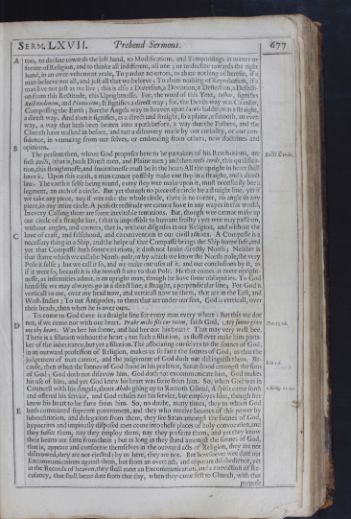 Serm. LXVII.
Prebend Sermons.
677
too, to decline towards the left hand, to Modifications, and Temporisings in matter or
Serm. LXVII.
Prebend Sermons.
677
too, to decline towards the left hand, to Modifications, and Temporisings in matter or
forme of Religion, and to thinke all indifferent, all one; or to decline towards the right
hand, in an over-vehement zeale, To pardon no errors, to abate nothing of heresie, if a
man beleeve not all, and just all that we beleeve; To abate nothing of Reprobation, if a
man live not just as we live; this is also a Diversion, a Deviation, a Deflection, a Defecti-
on from this Rectitude, this Uprightnesse. For, the word of this Text, Iashar, signifies
Rectitudinem, and Planiciem; It signifies a direct way; for, the Devils way was Circular,
Compassing the Earth; But the Angels way to heaven upon Iacobs ladder, was a straight,
a direct way. And then it signifies, as a direct and straight, so a plaine, a smooth, an even
way, a way that hath been beaten into a path before, a way that the Fathers, and the
Church have walked in before, and not a discovery made by our curiosity, or our con-
fidence, in venturing from our selves, or embracing from others, new doctrines and
opinions.
The persons then, whom God proposes here to be partakers of his Retributions, Recti Corde. are
first Recti, (that is, both Direct men, and Plaine men) and then recti corde, this qualifica-
tion, this straightnesse, and smoothnesse must be in the heart; All the upright in heart shall
have it. Upon this earth, a man cannot possibly make one step in a straight, and a direct
line. The earth it selfe being round, every step wee make upon it, must necessarily bee a
segment, an arch of a circle. But yet though no piece of a circle be a straight line, yet if
we take any piece, nay if wee take the whole circle, there is no corner, no angle in any
piece, in any intire circle. A perfectt rectitude we cannot have in any wayes in this world;
In every Calling there are some inevitable tentations. But, though wee cannot make up
our circle of a straight line, (that is impossible to humane frailty) yet wee may passe on,
without angles, and corners, that is, without disguises in our Religion, and without the
love of craft, and falsehood, and circumvention in our civill actions. A Compasse is a
necessary thing in a Ship, and the helpe of that Compasse brings the Ship home safe, and
yet that Compasse hath some variations, it doth not looke directly North; Neither is
that starre which we call the North-pole, or by which we know the North-pole, the very
Pole it selfe; but we call it so, and we make our uses of it, and our conclusions by it, as
if it were so, because it is the neerest starre to that Pole. He that comes as neere upright-
nesse, as infirmities admit, is an upright man, though he have some obliquities. To God
himselfe we may alwayes go in a direct line, a straight, a perpendicular line; For God is
verticall to me, over my head now, and verticall now to them, that are in the East, and
West-Indies; To our Antipodes, to them that are under our feet, God is verticall, over
their heads, then when he is over ours.
To come to God there is a straight line for every man every where: But this we doe
not, if we come not with our heart. Præbe mihi fili cor tuum, saith God, Pro. 23.26. My sonne give
me thy heart. Was hee his sonne, and had hee not his heart? That may very well bee.
There is a filiation without the heart; not such a filiation, as shall ever make him parta-
ker of the inheritance, but yet a filiation. The associating our selves to the sonnes of God,
in an outward profession of Religion, makes us so farre the sonnes of God, as that the
judgement of man cannot, and the judgement of God doth not distinguish them.Iob 1.6. Be-
cause, then when the sonnes of God stood in his presence, Satan stood amongst the sons
of God; God doth not disavow him, God doth not excommunicate him, God makes
his use of him, and yet God knew his heart was farre from him. So, when God was in
Councell with his Angels, about Ahabs going up to Ramoth Gilead, 1 King. 22.22. A spirit came forth
and offered his service, and God refuses not his service, but employes him, though hee
knew his heart to be farre from him. So, no doubt, many times, they to whom God
hath committed supreme government, and they who receive beames of this power by
subordination, and delegation from them, they see Satan amongst the sonnes of God,
hypocrites and impiously disposed men come into these places of holy convocation, and
they suffer them, nay they employ them, nay they preferre them, and yet they know
their hearts are farre from them; but as long as they stand amongst the sonnes of God,
that is, appeare and conforme themselves in the outward acts of Religion, they are not
disavowed, they are not ejected: by us here, they are not. But howsoever wee date our
Excommunications against them, but from an overt act, and apparant disobedience, yet
in the Records of heaven, they shall meet an Excommunication, and a conviction of Re-
cusancy, that shall beare date from that day, when they came first to Church, with that purpose
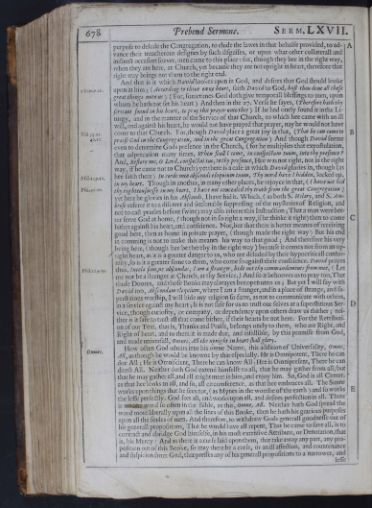 678
Prebend Sermons.
Serm. LXVII.
purpose to delude the Congregation, to elude the lawes in that behalfe provided, to ad-
678
Prebend Sermons.
Serm. LXVII.
purpose to delude the Congregation, to elude the lawes in that behalfe provided, to ad-vance their treacherous designes by such disguises, or upon what other collaterall and
indirect occasion soever, men come to this place: for, though they bee in the right way,
when they are here, at Church, yet because they are not upright in heart, therefore that
right way brings not them to the right end.
And that is it which David lookes upon in God, and desires that God should looke
upon in him;2 Sam. 7.21. (According to thine owne heart, saith David to God, hast thou done all these
great things unto us) (For, sometimes God doth give temporall blessings to men, upon
whom he hath not set his heart) And then in the 27. Verse he sayes, (Therefore hath thy
servant found in his heart, to pray this prayer unto thee) If he had onely found it in the Li-
turgy, and in the manner of the Service of that Church, to which hee came with an ill
will, and against his heart, he would not have prayed that prayer, nay he would not have
come to that Church.Psal. 35.11.
40.10. For, though David place a great joy in that, (That he can come to
praise God in the Congregation, and in the great Congregation) And though David seeme
even to determine Gods presence in the Church, (for he multiplies that expostulation,
that adprecation many times, When shall I come, in conspectum tuum, into thy presence?
And, Restore me, O Lord, conspectui tuo, to thy presence, Hee was not right, not in the right
way, if he came not to Church) yet there is a case in which David glories in, though (as
hee saith there) In corde meo abscondi eloquium tuum, Psal. 119.11. Thy word have I hidden, locked up,
in my heart. Though in another, in many other places, he rejoyce in that, (I have not hid
thy righteousnesse in my heart,Psal. 40.10. I have not concealed thy truth from the great Congregation)
yet here he glories in his Abscondi, I have hid it. Which, (as both S. Hilary, and S. Am-
brose referre it to a discreet and seasonable suppressing of the mysteries of Religion, and
not to cast pearles before swine) may also inferre this Instruction; That a man were bet-
ter serve God at home, (though not in so right a way, if he thinke it right) then to come
hither against his heart, and conscience. Not, but that there is better meanes of receiving
good here, then at home in private prayer, (though made the right way) But his end
in comming is not to make this meanes his way to that good; And therefore his very
being here, (though hee be thereby in the right way) because it comes not from an up-
right heart, as it is a greater danger to us, who are deluded by their hypocriticall confor-
mity, so is it a greater sinne to them, who come so against their conscience. David prayes
thus, Psal. 119.19. Incola sum, ne abscondas, I am a stranger, hide not thy commandements from mee, (Let
me not be a stranger at Church, at thy Service.) And so it behooves us to pray too, That
those Doores, and those Books may alwayes bee open unto us; But yet I will say with
David too, Abscondam eloquium, where I am a stranger, and in a place of strange, and su-
perstitious worship, I will hide my religion so farre, as not to communicate with others,
in a service against my heart; It is not safe for us to trust our selves at a superstitious Ser-
vice, though curiosity, or company, or dependency upon others draw us thither; nei-
ther is it safe to trust all that come hither, if their hearts be not here. For the Retributi-
on of our Text, that is, Thanks and Praise, belongs onely to them, who are Right, and
Right of heart, and to them it is made due, and infallible, by this promise from God,
and made universall, Omnes, All the upright in heart shall glory.
How often God admits into his owne Name, Omnes. this addition of Universality, Omne,
All, as though he would be knowne by that especially. He is Omnipotent, There he can
doe All; He is Omniscient, There he can know All; Hee is Omnipresent, There he can
direct All. Neither doth God extend himselfe to all, that he may gather from all, but
that he may gather all, and all might meet in him, and enjoy him. So, God is all Center,
as that hee looks to all, and so, all circumference, as that hee embraces all. The Sunne
works upon things that he sees not, (as Mynes in the wombe of the earth) and so works
the lesse perfectly. God sees all, and works upon all, and desires perfection in all. There
is no one word so often in the Bible, as this, Omne, All. Neither hath God spread the
word more liberally upon all the lines of this Booke, then he hath his gracious purposes
upon all the soules of men. And therefore, to withdraw Gods generall goodnesse out of
his generall propositions, That he would have all repent, That he came to save all, is to
contract and abridge God himselfe, in his most extensive Attribute, or Denotation, that
is, his Mercy: And as there is a curse laid upon them, that take away any part, any pro-
position out of this Booke, so may there be a curse, or an ill affection, and countenance
and suspicion from God, that presses any of his generall propositions to a narrower, and lesse
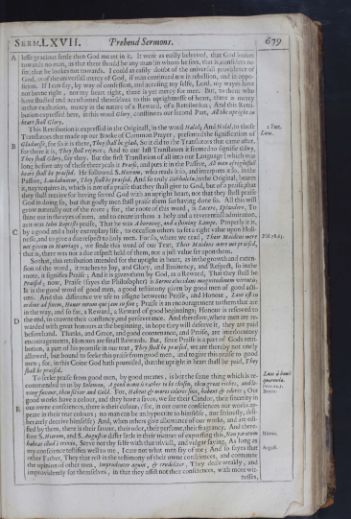 Serm. LXVII.
Prebend Sermons.
679
lesse gracious sense then God meant in it. It were as easily beleeved, that God lookes
Serm. LXVII.
Prebend Sermons.
679
lesse gracious sense then God meant in it. It were as easily beleeved, that God lookes
towards no man, as that there should be any man (in whom he sees, that is, considers no
sin) that he lookes not towards. I could as easily doubt of the universall providence of
God, as of the universall mercy of God, if man continued not in rebellion, and in oppo-
sition. If I can say, by way of confession, and accusing my selfe, Lord, my wayes have
not beene right, nor my heart right, there is yet mercy for mee. But, to them who
have studied and accustomed themselves to this uprightnesse of heart, there is mercy
in that exaltation, mercy in the nature of a Reward, of a Retribution; And this Retri-
bution expressed here, in this word Glory, constitutes our second Part, All the upright in
heart shall Glory.
This Retribution is expressed in the Originall, in the word Halal; And Halal, 2 Part. to those
Translators that made up our Booke of Common Prayer, presented the signification ofLaus.
Gladnesse, for so it is there, They shall be glad; So it did to the Translators that came after,
for there it is, They shall rejoyce; And to our last Translators it seemed to signifie Glory,
They shall Glory, say they. But the first Translation of all into our Language (which was
long before any of these three) cals it Praise, and puts it in the Passive, All men of rightfull
heart shall be praised. He followed S. Hierom, who reads it so, and interprets it so, in the
Passive, Laudabuntur, They shall be praised. And so truly Iithhalelu, in the Original, beares
it, nay requires it; which is not of a praise that they shall give to God, but of a praise, that
they shall receive for having served God with an upright heart; not that they shall praise
God in doing so, but that godly men shall praise them for having done so. All this will
grow naturally out of the roote; for, the roote of this word, is Lucere, Splendere, To
shine out in the eyes of men, and to create in them a holy and a reverentiall admiration,
as it was Iohn Baptists praise, That he was A burning, and a shining Lampe. Properly it is,
by a good and a holy exemplary life, to occasion others to set a right value upon Holi-
nesse, and to give a due respect to holy men. For so, where we read, Psal. 78.63. Their Maidens were
not given in Marriage, we finde this word of our Text, Their Maidens were not praised,
that is, there was not a due respect held of them, nor a just value set upon them.
So that, this retribution intended for the upright in heart, as in the growth and exten-
sion of the word, it reaches to Joy, and Glory, and Eminency, and Respect, so in the
roote, it signifies Praise; And it is given them by God, as a Reward, That they shall be
Praised; now, Praise (sayes the Philosopher) is Sermo elucidans magnitudinem virtutis;
It is the good word of good men, a good testimony given by good men of good acti-
ons. And this difference we use to assigne betweene Praise, and Honour, Laus est in
ordine ad finem, Honor eorum qui jam in fine; Praise is an encouragement to them that are
in the way, and so far, a Reward, a Reward of good beginnings; Honour is reserved to
the end, to crowne their constancy, and perseverance. And therefore, where men are re-
warded with great honours at the beginning, in hope they will deserve it, they are paid
beforehand. Thanks, and Grace, and good countenance, and Praise, are interlocutory
encouragements, Honours are finall Rewards. But, since Praise is a part of Gods retri-
bution, a part of his promise in our text, They shall be praised, we are thereby not onely
allowed, but bound to seeke this praise from good men, and to give this praise to good
men; for, in this Coine God hath promised, that the upright in heart shall be paid, They
shall be praised.
To seeke praise from good men, by good meanes, Laus à bonis
quærenda. is but the same thing which is re-
commended to us by Solomon, A good name is rather to be chosen, then great riches, and lo-
ving favour, then silver and Gold. For, Habent & mores colores suos, habent & odores; Our Prov. 22.1.
Bernar.
good works have a colour, and they have a savor; we see their Candor, their sincerity in
our owne consciences, there is their colour; (for, in our owne consciences our works ap-
peare in their true colours; no man can be an hypocrite to himselfe, nor seriously, deli-
berately deceive himselfe) And, when others give allowance of our works, and are edi-
fied by them, there is their savour, their odor, their perfume, their fragrancy. And there-
fore S. Hierom, and S. Augustin differ little in their manner of expressing this, Hieron. Non paratum
habeas illud è trivio, Serve not thy selfe with that triviall, and vulgar saying, As long as
my conscience testifies well to me, I care not what men say of me;August. And so sayes that
other Father, They that rest in the testimony of their owne consciences, and contemne
the opinion of other men, Imprudenter agunt, & crudeliter, They deale weakly, and
improvidently for themselves, in that they assist not their consciences, with more wit-
nesses,
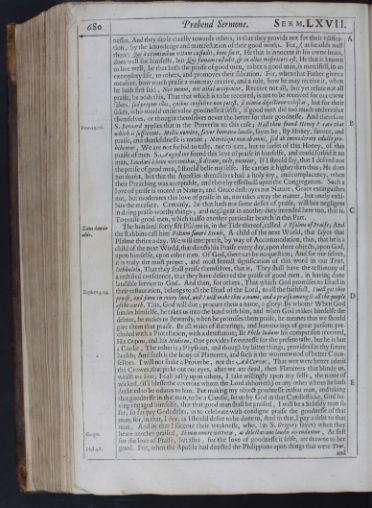 680
Prebend Sermons.
Serm. LXVII.
nesses, And they deale cruelly towards others, in that they provide not for their edifica-
680
Prebend Sermons.
Serm. LXVII.
nesses, And they deale cruelly towards others, in that they provide not for their edifica-tion, by the knowledge and manifestation of their good works. For, (as he adds well
there) Qui à criminibus vitam custodit, bene facit, He that is innocent in his owne heart,
does well for himselfe, but Qui famam custodit, & in alios misericors est, He that is known
to live well, he that hath the praise of good men, to bee a good man, is mercifull, in an
exemplary life, to others, and promoves their salvation. For, when that Father gives a
measure, how much praise a man may receive, and a rule, how he may receive it, when
he hath first said, Nec totum, nec nihil accipiatur, Receive not all, but yet refuse not all
praise, he adds this, That that which is to be received, is not to be received for our owne
sakes, sed propter illos, quibus consulere non potest, si nimia dejectione vilescat, but for their
sakes, who would undervalue goodnesse it selfe, if good men did too much undervalue
themselves, or thought themselves never the better for their goodnesse. And therefore
S. Bernard applies that in the Proverbs to this case;Prov. 25.16. Hast thou found Honey? eate that
which is sufficient. Mellis nomine, favor humanæ laudis, sayes he, By Honey, favour, and
praise, and thankfulnesse is meant; Meritóque non ab omni, sed ab immoderato edulio pro-
hibemur, We are not forbid to taste, nor to eate, but to surfet of this Honey, of this
praise of men. S. Augustine found this love of praise in himselfe, and could forbid it no
man, Laudari à bene viventibus, si dicam, nolo, mentior, If I should say, that I desired not
the praise of good men, I should belie my selfe. He carries it higher then thus; He does
not doubt, but that the Apostles themselves had a holy joy, and complacency, when
their Preaching was acceptable, and thereby effectuall upon the Congregation. Such a
love of praise is rooted in Nature; and Grace destroyes not Nature; Grace extinguishes
not, but moderates this love of praise in us, nor takes away the matter, but onely exhi-
bits the measure. Certainly, he that hath not some desire of praise, will bee negligent
in doing praise-worthy things; and negligent in another duty intended here too, that is,
To praise good men, which is also another particular branch in this Part.
The hundred forty fift Psalme is, Laus danda
aliis. in the Title thereof, called A Psalme of Praise; And
the Rabbins call him Filium futuri Seculi, A child of the next World, that sayes that
Psalme thrice a day. We will interpret it, by way of Accommodation, thus, that he is a
child of the next World, that directs his Praise every day, upon three objects, upon God,
upon himselfe, upon other men. Of God, there can be no question; And for our selves,
it is truly the most proper, and most literall signification of this word in our Text,
Iithhalelu, That they shall praise themselves, that is, They shall have the testimony of
a rectified conscience, that they have deserved the praise of good men, in having done
laudible service to God. And then, for others, That which God promises to Israel in
their restauration, Zephan. 3.19. belongs to all the Israel of the Lord, to all the faithfull, I will get thee
praise, and fame in every land, and I will make thee a name, and a praise amongst all the people
of the earth. This, God will doe; procure them a name, a glory: By whom? When God
bindes himselfe, he takes us into the band with him, and when God makes himselfe the
debtor, he makes us stewards; when he promises them praise, he meanes that we should
give them that praise. Be all waies of flatterings, and humourings of great persons pre-
cluded with a Protestation, with a detestation; Be Philo Iudæus his comparison received,
His Coquus, and his Medicus, One provides sweetnesse for the present taste, but he is but
a Cooke, The other is a Physitian, and though by bitter things, provides for thy future
health; And such is the hony of Flatterers, and such is the wormewood of better Coun-
sellors. I will not shake a Proverbe, not the Ad Corvos, That wee were better admit
the Crowes, that picke out our eyes, after we are dead, then Flatterers that blinde us,
whilst we live; I cast justly upon others, I take willingly upon my selfe, the name of
wicked, (if I blesse the covetous whom the Lord abhorreth) or any other whom he hath
declared to be odious to him. But making my object goodnesse in that man, and taking
that goodnesse in that man, to be a Candle, set up by God in that Candlesticke, God ha-
ving engaged himselfe, that that good man shall be praised, I will be a Subsidy man so
far, so far pay Gods debts, as to celebrate with condigne praise the goodnesse of that
man; for, in that, I doe, as I should desire to be done to, And in that, I pay a debt to that
man, And in that I succour their weaknesse, who, (as S. Gregory sayes) when they
heare another praised, Gregor. Si non amore virtutis, at delectatione laudis accenduntur, At first
for the love of Praise, but after, for the love of goodnesse it selfe, are drawne to bee
good.Phil. 4.8. For, when the Apostle had directed the Philippians upon things that were True, and
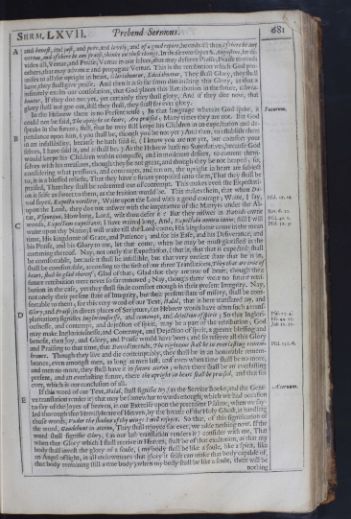 Serm. LXVII.
Prebend Sermons.
681
and honest, and just, and pure, and lovely, and of a good report, he ends all thus, If there be any
Serm. LXVII.
Prebend Sermons.
681
and honest, and just, and pure, and lovely, and of a good report, he ends all thus, If there be any
vertue, and if there be any praise, thinke on these things. In those two sayes S. Augustine, he di-
vides all, Vertue, and Praise; Vertue in our selves, that may deserve Praise; Praise towards
others, that may advance and propagate Vertue. This is the retribution which God pro-
mises to all the upright in heart, Gloriabuntur, Laudabuntur, They shall Glory, they shall
have, they shall give praise. And then it is so far from diminishing this Glory, as that it
infinitely exalts our consolation, that God places this Retribution in the future, Gloria-
buntur, If they doe not yet, yet certainly they shall glory, And if they doe now, that
glory shall not goe out, still they shall, they shall for ever glory.
In the Hebrew there is no Present tense; In that language wherein God spake, Futurum. it
could not be said, The upright in heart, Are praised; Many times they are not. But God
speaks in the future; first, that he may still keepe his Children in an expectation and de-
pendance upon him, (you shall be, though you be not yet) And then, to establish them
in an infallibility, because he hath said it, (I know you are not yet, but comfort your
selves, I have said it, and it shall be.) As the Hebrew hath no Superlatives, because God
would keepe his Children within compasse, and in moderate desires, to content them-
selves with his measures, though they be not great, and though they be not heaped; so,
considering what pressures, and contempts, and terrors, the upright in heart are subject
to, it is a blessed reliefe, That they have a future proposed unto them, That they shall be
praised, That they shall be redeemed out of contempt. This makes even the Expectati-
on it selfe as sweet to them, as the fruition would be. This makes them, that when Da-
vid sayes, Expecta viriliter, Waite upon the Lord with a good courage; Waite, I say, Psal. 27.14.
upon the Lord, they doe not answer with the impatience of the Martyrs under the Al-
tar, Vsquequo, How long, Lord, wilt thou defer it?Rev. 6.10. But they answer in Davids owne
words, Expectans expectavi, I have waited long, And, Expectabo nomen tuum, still I will Psal. 40.1.
waite upon thy Name; I will waite till the Lord come; His kingdome come in the mean Psal. 52.9.
time, His kingdome of Grace, and Patience; and for his Ease, and his Deliverance, and
his Praise, and his Glory to me, let that come, when he may be most glorified in the
comming thereof. Nay, not onely the Expectation, (that is, that that is expected) shall
be comfortable, because it shall be infallible, but that very present state that he is in,
shall be comfortable, according to the first of our three Translations, They that are true of
heart, shall be glad thereof; Glad of that; Glad that they are true of heart, though their
future retribution were never so far removed; Nay, though there were no future retri-
bution in the case, yet they shall finde comfort enough in their present Integrity. Nay,
not onely their present state of Integrity, but their present state of misery, shall be com-
fortable to them; for this very word of our Text, Halal, that is here translated Ioy, and
Glory, and Praise, in divers places of Scripture, (as Hebrew words have often such a trans-
plantation) signifies Ingloriousnesse, and contempt, and dejection of spirit;Psal. 75.4. So that Inglori-
ousnesse, and contempt, and dejection of spirit, may be a part of the retribution; God Esa. 44.25.
may make Ingloriousnesse, and Contempt, and Dejection of spirit, a greater blessing and Job 12.17.
benefit, then Joy, and Glory, and Praise would have been; and so reserve all this Glory
and Praising to that time, that David intends, Psal. 112.6. The righteous shall be in everlasting remem-
brance. Though they live and die contemptibly, they shall be in an honorable remem-
brance, even amongst men, as long as men last, and even when time shall be no more,
and men no more, they shall have it in futuro æterno; where there shall be an everlasting
present, and an everlasting future, there the upright in heart shall be praised, and that for
ever, which is our conclusion of all.
If this word of our Text, Halal, shall signifie Ioy, (as the Service Booke, Æternum. and the Gene-
va translation render it) that may be somewhat towards enough, which we had occasion
to say of the Joyes of heaven, in our Exercise upon the precedent Psalme, when we say-
led thorough that Hemispheare of Heaven, by the breath of the Holy Ghost, in handling
those words, Vnder the shadow of thy wings I will rejoyce. So that, of this signification of
the word, Gaudebunt in æterno, They shall rejoyce for ever, we adde nothing now. If the
word shall signifie Glory, (as our last translation renders it) consider with me, That
when that Glory which I shall receive in Heaven, shall be of that exaltation, as that my
body shall invest the glory of a soule, (my body shall be like a soule, like a spirit, like
an Angel of light, in all endowments that glory it selfe can make that body capable of,
that body remaining still a true body) when my body shall be like a soule, there will be nothing
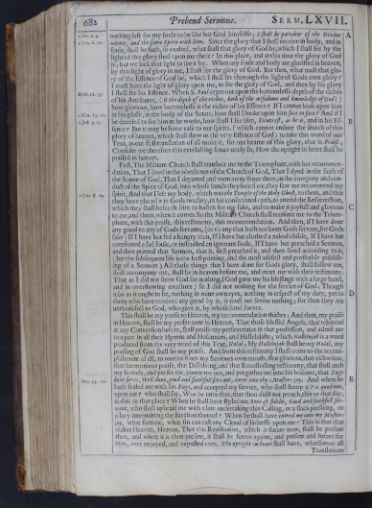 682
Prebend Sermons.
Serm. LXVII.
nothing left for my soule to be like but God himselfe;2 Pet. 1.4. I shall be partaker of the Divine
682
Prebend Sermons.
Serm. LXVII.
nothing left for my soule to be like but God himselfe;2 Pet. 1.4. I shall be partaker of the Divine
nature, and the same Spirit with him. Since the glory that I shall receive in body, and in1 Cor. 6.17.
soule, shall be such, so exalted, what shall that glory of God be, which I shall see by the
light of this glory shed upon me there? In this place, and at this time the glory of God
is; but we lack that light to see it by. When my soule and body are glorified in heaven,
by that light of glory in me, I shall see the glory of God. But then, what must that glo-
ry of the Essence of God be, which I shall see thorough the light of Gods own glory?
I must have the light of glory upon me, to see the glory of God, and then by his glory
I shall see his Essence.Rom. 11.33. When S. Paul cryes out upon the bottomlesse depth of the riches
of his Attributes, (O the depth of the riches, both of the wisedome and knowledge of God!)
how glorious, how bottomlesse is the riches of his Essence? If I cannot look upon him
in his glasse, 1 Cor. 13.12. in the body of the Sunne, how shall I looke upon him face to face? And if I
be dazeled to see him as he works, how shall I see him, Sicuti est, as he is, and in his 1 Joh. 3.2. Es-
sence? But it may be some ease to our spirits, (which cannot endure the search of this
glory of heaven, which shall shew us the very Essence of God) to take this word of our
Text, as our first translation of all tooke it, for one beame of this glory, that is Praise;
Consider we therefore this everlasting future onely so, How the upright in heart shall be
praised in heaven.
First, The Militant Church shall transmit me to the Triumphant, with her recommen-
dation, That I lived in the obedience of the Church of God, That I dyed in the faith of
the Sonne of God, That I departed and went away from them, in the company and con-
duct of the Spirit of God, into whose hands they heard me, they saw me recommend my
spirit, 1 Cor. 6.19. And that I left my body, which was the Temple of the Holy Ghost, to them, and that
they have placed it in Gods treasury, in his consecrated earth, to attend the Resurrection,
which they shall beseech him to hasten for my sake, and to make it joyfull and glorious
to me, and them, when it comes. So the Militant Church shall transmit me to the Trium-
phant, with this praise, this testimony, this recommendation. And then, if I have done
any good to any of Gods servants, (or to any that hath not been Gods servant, for Gods
sake) If I have but fed a hungry man, If I have but clothed a naked childe, If I have but
comforted a sad soule, or instructed an ignorant soule, If I have but preached a Sermon,
and then printed that Sermon, that is, first preached it, and then lived according to it,
(for the subsequent life is the best printing, and the most usefull and profitable publish-
ing of a Sermon) All those things that I have done for Gods glory, shall follow me,
shall accompany me, shall be in heaven before me, and meet me with their testimony,
That as I did not serve God for nothing, (God gave me his blessings with a large hand,
and in overflowing measures) so I did not nothing for the service of God; Though
it be as it ought to be, nothing in mine own eyes, nothing in respect of my duty, yet to
them who have received any good by it, it must not seeme nothing; for then they are
unthankfull to God, who gave it, by whose hand soever.
This shall be my praise to Heaven, my recommendation thither; And then, my praise
in Heaven, shall be my preferment in Heaven. That those blessed Angels, that rejoyced
at my Conversion before, shall praise my perseverance in that profession, and admit me
to a part in all their Hymns and Hosannaes, and Hallelujahs; which Hallelujah is a word
produced from the very word of this Text, Halal; My Hallelujah shall be my Halal, my
praising of God shall be my praise. And from this testimony I shall come to the accom-
plishment of all, to receive from my Saviours own mouth, that glorious, that victorious,
that harmonious praise, that Dissolving, and that Recollecting testimony, that shall melt
my bowels, and yet fix me, powre me out, and yet gather me into his bosome, that Euge
bone serve, Mat. 25.21. Well done, good and faithfull servant, enter into thy Masters joy. And when he
hath sealed me with his Euge, and accepted my service, who shall stamp a Væ quod non,
upon me? who shall say, Woe be unto thee, that thou didst not preach, this or that day,
in this or that place? When he shall have styled me Bone & fidelis, Good and faithfull ser-
vant, who shall upbraid me with a late undertaking this Calling, or a slack pursuing, or
a lazy intermitting the function thereof? When he shall have entred me into my Masters
joy, what fortune, what sin can cast any Cloud of sadnesse upon me? This is that that
makes Heaven, Heaven, That this Retribution, which is future now, shall be present
then, and when it is then present, it shall be future againe, and present and future for
ever, ever enjoyed, and expected ever. The upright in heart shall have, whatsoever all Translations
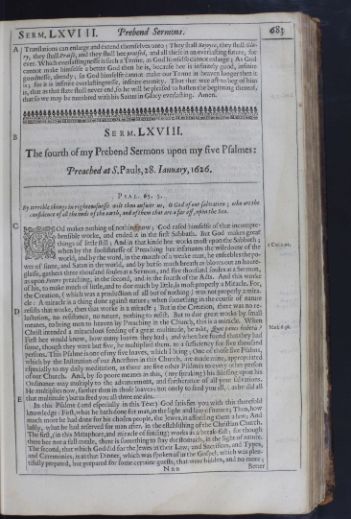 Serm. LXVIII.
Prebend Sermons.
683
Translations can enlarge and extend themselves unto; They shall Rejoyce, they shall Glo-
Serm. LXVIII.
Prebend Sermons.
683
Translations can enlarge and extend themselves unto; They shall Rejoyce, they shall Glo-ry, they shall Praise, and they shall bee praised, and all these in an everlasting future, for
ever. Which everlastingnesse is such a Terme, as God himselfe cannot enlarge; As God
cannot make himselfe a better God then he is, because hee is infinitely good, infinite
goodnesse, already; so God himselfe cannot make our Terme in heaven longer then it
is; for it is infinite everlastingnesse, infinite eternity. That that wee are to beg of him
is, that as that state shall never end, so he will be pleased to hasten the beginning thereof,
that so we may be numbred with his Saints in Glory everlasting. Amen.
Serm. LXVIII.
The fourth of my Prebend Sermons upon my five Psalmes:
Preached at S. Pauls, 28. Ianuary, 1626.
Psal. 65.5.
By terrible things in righteousnesse wilt thou answer us, O God of our salvation; who art the
confidence of all the ends of the earth, and of them that are a far off, upon the Sea.
GOdGod makes nothing of nothing now; God eased himselfe of that incompre-
hensible worke, and ended it in the first Sabbath. But God makes great
things of little still; And in that kinde hee works most upon the Sabbath;
1 Cor. 1.21. when by the foolishnesse of Preaching hee infatuates the wisedome of the
world, and by the word, in the mouth of a weake man, he enfeebles the po-
wer of sinne, and Satan in the world, and by but so much breath as blows out an houre-
glasse, gathers three thousand soules at a Sermon, and five thousand soules at a Sermon,
as upon Peters preaching, in the second, and in the fourth of the Acts. And this worke
of his, to make much of little, and to doe much by little, is most properly a Miracle. For,
the Creation, (which was a production of all out of nothing) was not properly a mira-
cle: A miracle is a thing done against nature; when something in the course of nature
resists that worke, then that worke is a miracle; But in the Creation, there was no re-
luctation, no resistance, no nature, nothing to resist. But to doe great works by small
meanes, to bring men to heaven by Preaching in the Church, this is a miracle. When
Christ intended a miraculous feeding of a great multitude, he askt, Quot panes habetis?Mark 6.38.
First hee would know, how many loaves they had; and when hee found that they had
some, though they were but five, he multiplied them, to a sufficiency for five thousand
persons. This Psalme is one of my five loaves, which I bring; One of those five Psalms,
which by the Institution of our Ancestors in this Church, are made mine, appropriated
especially to my daily meditation, as there are five other Psalmes to every other person
of our Church. And, by so poore meanes as this, (my speaking) his Blessing upon his
Ordinance may multiply to the advancement, and furtherance of all your salvations.
He multiplies now, farther then in those loaves; not onely to feed you all, (as he did all
that multitude) but to feed you all three meales.
In this Psalme (and especially in this Text) God satisfies you with this threefold
knowledge: First, what he hath done for man, in the light and law of nature; Then, how
much more he had done for his chosen people, the Jewes, in affording them a law; And
lastly, what he had reserved for man after, in the establishing of the Christian Church.
The first, (in this Metaphore, and miracle of feeding) works as a break-fast; for though
there bee not a full meale, there is something to stay the stomach, in the light of nature.
The second, that which God did for the Jewes in their Law, and Sacrifices, and Types,
and Ceremonies, is as that Dinner, which was spoken of in the Gospel, which was plen-
tifully prepared, but prepared for some certaine guests, that were bidden, and no more; Nnn Better
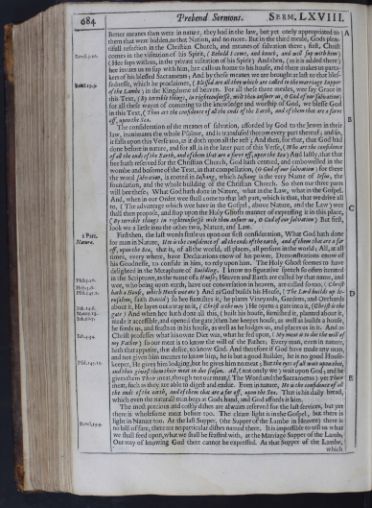 684
Prebend Sermons.
Serm. LXVIII.
Better meanes then were in nature, they had in the law, but yet onely appropriated to
684
Prebend Sermons.
Serm. LXVIII.
Better meanes then were in nature, they had in the law, but yet onely appropriated to
them that were bidden, to that Nation, and no more. But in the third meale, Gods plen-
tifull refection in the Christian Church, and meanes of salvation there; first, Christ
comes in the visitation of his Spirit, Revel. 3.20. (Behold I come, and knock, and will sup with him)
(Hee sups with us, in the private visitation of his Spirit) And then, (as it is added there)
hee invites us to sup with him, hee calls us home to his house, and there makes us parta-
kers of his blessed Sacraments; And by those meanes we are brought at last to that bles-
sednesse, Revel. 19.9. which he proclaimes, (Blessed are all they which are called to the marriage Supper
of the Lambe) in the Kingdome of heaven. For all these three meales, wee say Grace in
this Text, (By terrible things, in righteousnesse, wilt thou answer us, O God of our salvation)
for all these wayes of comming to the knowledge and worship of God, we blesse God
in this Text, (Thou art the confidence of all the ends of the Earth, and of them that are a farre
off, upon the Sea).
The consideration of the meanes of salvation, afforded by God to the Jewes in their
law, inanimates the whole Psalme, and is transfused thorow every part thereof; and so,
it falls upon this Verse too, as it doth upon all the rest; And then, for that, that God had
done before in nature, and for all, is in the later part of this Verse, (Who art the confidence
of all the ends of the Earth, and of them that are a farre off, upon the Sea) And lastly, that that
hee hath reserved for the Christian Church, God hath centred, and embowelled in the
wombe and bosome of the Text, in that compellation, (O God of our salvation) for there
the word salvation, is rooted in Iashang, which Iashang is the very Name of Iesus, the
foundation, and the whole building of the Christian Church. So then our three parts
will bee these; What God hath done in Nature, what in the Law, what in the Gospel.
And, when in our Order wee shall come to that last part, which is that, that we drive all
to, (The advantage which wee have in the Gospel, above Nature, and the Law) wee
shall then propose, and stop upon the Holy Ghosts manner of expressing it in this place,
(By terrible things in righteousnesse wilt thou answer us, O God of our salvation) But first,
look we a little into the other two, Nature, and Law.
First then, 1 Part. the last words settle us upon our first consideration, What God hath done
for man in Nature, Hee is the confidence of all the ends of the earth, and of them that are a far Natura.
off, upon the Sea, that is, of all the world, all places, all persons in the world; All, at all
times, every where, have Declarations enow of his power, Demonstrations enow of
his Goodnesse, to confide in him, to rely upon him. The Holy Ghost seemes to have
delighted in the Metaphore of Building. I know no figurative speech so often iterated
in the Scriptures, Phil. 3.20. as the name of a House; Heaven and Earth are called by that name, and
wee, who being upon earth, have our conversation in heaven, are called so too, (Christ Heb. 3.6.
hath a House, which House wee are) And as God builds his House, (The Lord builds up Psal. 147.2. Ie-
rusalem, saith David) so hee furnishes it, he plants Vineyards, Gardens, and Orchards
about it, Ioh. 14.6. He layes out a way to it, (Christ is the way) He opens a gate into it, (Christ is the
gate) And when hee hath done all this, (built his house, furnished it, planted about it, Matt. 7.13.
made it accessible, and opened the gate) then hee keepes house, as well as builds a house, Ioh. 10.7.
he feeds us, and feasts us in his house, as well as he lodges us, and places us in it. And as
Christ professes what his owne Diet was, Ioh. 4.34. what he fed upon, (My meat is to doe the will of
my Father) so our meat is to know the will of the Father; Every man, even in nature,
hath that appetite, that desire, to know God. And therefore if God have made any man,
and not given him meanes to know him, he is but a good Builder, he is no good House-
keeper, He gives him lodging, but he gives him no meat; But the eyes of all wait upon thee, Psal. 145.15.
and thou givest them their meat in due season. All, (not onely we) wait upon God; and he
gives them Their meat, though not our meat, (The Word and the SacramenssSacraments) yet Their
meat, such as they are able to digest and endue. Even in nature, He is the confidence of all
the ends of the earth, and of them that are a far off, upon the Sea. That is his daily bread,
which even the naturall man begs at Gods hand, and God affords it him.
The most precious and costly dishes are alwaies reserved for the last services, but yet
there is wholesome meat before too. The cleare light is in the Gospel, but there is
light in Nature too.Revel. 19.9. At the last Supper, (the Supper of the Lambe in Heaven) there is
no bill of fare, there are no particular dishes named there. It is impossible to tell us what
we shall feed upon, what we shall be feasted with, at the Marriage Supper of the Lamb;
Our way of knowing God there cannot be expressed. At that Supper of the Lambe, which
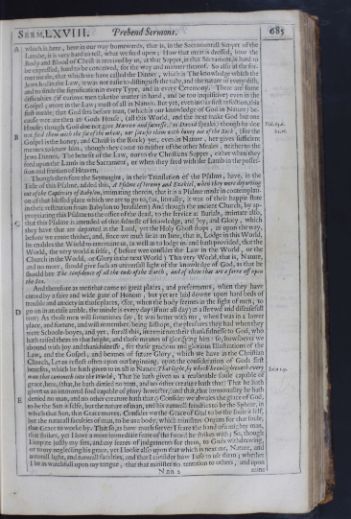 Serm. LXVIII.
Prebend Sermons.
685
which is here, here in our way homewards, that is, in the Sacramentall Supper of the
Serm. LXVIII.
Prebend Sermons.
685
which is here, here in our way homewards, that is, in the Sacramentall Supper of the
Lambe, it is very hard to tell, what we feed upon; How that meat is dressed, how the
Body and Blood of Christ is received by us, at that Supper, in that Sacrament, is hard to
be expressed, hard to be conceived, for the way and manner thereof. So also in the for-
mer meale, that which we have called the Dinner, which is The knowledge which the
Jews had in the Law, it was not easie to distinguish the taste, and the nature of every dish,
and to finde the signification in every Type, and in every Ceremony. There are some
difficulties (if curious men take the matter in hand, and be too inquisitive) even in the
Gospel; more in the Law; most of all in Nature. But yet, even in this first refection, this
first meale, that God sets before man, (which is our knowledge of God in Nature) be-
cause wee are then in Gods House, (all this World, and the next make God but one
House) though God doe not give Marrow and fatnesse, Psal. 63.6.
81.16. (as David speaks) though he doe
not feed them with the fat of the wheat, nor satisfie them with honey out of the Rock, (for the
Gospel is the honey, and Christ is the Rock) yet, even in Nature, hee gives sufficient
meanes to know him, though they come to neither of the other Meales, neither to the
Jews Dinner, The benefit of the Law, nor to the Christians Supper, either when they
feed upon the Lamb in the Sacrament, or when they feed with the Lamb in the posses-
sion and fruition of Heaven.
Though therefore the Septuagint, in their Translation of the Psalms, have, in the
Title of this Psalme, added this, A Psalme of Ieremy and Ezekiel, when they were departing
out of the Captivity of Babylon, intimating therein, that it is a Psalme made in contemplati-
on of that blessed place which we are to go to, (as, literally, it was of their happie state
in their restitution from Babylon to Jerusalem) And though the ancient Church, by ap-
propriating this Psalme to the office of the dead, to the service at Burials, intimate also,
that this Psalme is intended of that fulnesse of knowledge, and Joy, and Glory, which
they have that are departed in the Lord, yet the Holy Ghost stops, as upon the way,
before we come thither, and, since we must lie in an Inne, that is, Lodge in this World,
he enables the World to entertaine us, as well as to lodge us, and hath provided, that the
World, the very world it selfe, (before wee consider the Law in the World, or the
Church in the World, or Glory in the next World) This very World, that is, Nature,
and no more, should give such an universall light of the knowledge of God, as that he
should bee The confidence of all the ends of the Earth, and of them that are a farre off upon
the Sea.
And therefore as men that come to great places, and preferments, when they have
entred by a faire and wide gate of Honour, but yet are laid downe upon hard beds of
trouble and anxiety in those places, (for, when the body seemes in the sight of men, to
go on in an easie amble, the minde is every day (if not all day) in a shrewd and diseasefull
trot) As those men will sometimes say, It was better with me, when I was in a lower
place, and fortune, and will remember, being Bishops, the pleasures they had when they
were Schoole-boyes, and yet, for all this, intermit not their thankfulnesse to God, who
hath raised them to that height, and those meanes of glorifying him: so, howsoever we
abound with joy and thankfulnesse, for these gracious and glorious Illustrations of the
Law, and the Gospel, and beames of future Glory, which we have in the Christian
Church, Let us reflect often upon our beginning, upon the consideration of Gods first
benefits, which he hath given to us all in Nature, That light, Iohn 1.9. by which he enlighteneth every
man that commeth into the World, That he hath given us a reasonable soule capable of
grace, here, (that, he hath denied no man, and no other creature hath that) That he hath
given us an immortal soul capable of glory hereafter, (and that, that immortality he hath
denied no man, and no other creature hath that.) Consider we alwaies the grace of God,
to be the Sun it selfe, but the nature of man, and his naturall faculties to be the Sphear, in
which that Sun, that Grace moves. Consider we the Grace of God to be the soule it self,
but the naturall faculties of man, to be as a body, which ministers Organs for that soule,
that Grace to worke by. That so, as how much soever I feare the hand of a mighty man,
that strikes, yet I have a more immediate feare of the sword he strikes with; So, though
I impute justly my sins, and my feares of judgements for them, to Gods withdrawing,
or to my neglecting his grace, yet I looke also upon that which is next me, Nature, and
naturall light, and naturall faculties, and that I consider how I use to use them; whether
I be as watchfull upon my tongue, that that minister no tentation to others, and upon Nnn2 mine
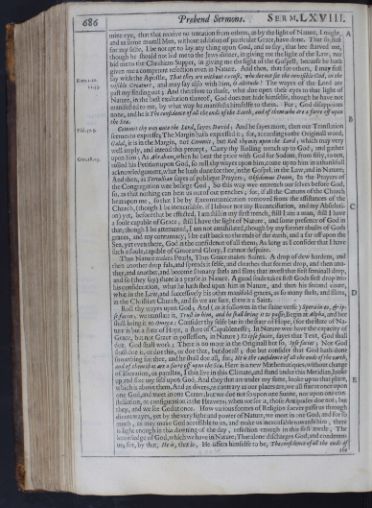 686
Prebend Sermons.
Serm. LXVIII.
mine eye, that that receive no tentation from others, as by the light of Nature, I might,
686
Prebend Sermons.
Serm. LXVIII.
mine eye, that that receive no tentation from others, as by the light of Nature, I might,
and as some morall Men, without addition of particular Grace, have done. That so, first
for my selfe, I be not apt to lay any thing upon God, and to say, that hee starved me,
though he should not bid me to the Jews dinner, in giving me the light of the Law, nor
bid me to the Christians Supper, in giving me the light of the Gospell, because he hath
given me a competent refection even in Nature. And then, that for others, I may first
say with the Apostle, Rom. 1.20.
11.33. That they are without excuse, who doe not see the invisible God, in the
visible Creature, and may say also with him, O altitudo! The wayes of the Lord are
past my finding out; And therefore to those, who doe open their eyes to that light of
Nature, in the best exaltation thereof, God does not hide himselfe, though he have not
manifested to me, by what way he manifests himselfe to them. For, God disappoints
none, and he is The confidence of all the ends of the Earth, and of them who are a farre off upon
the Sea.
Commit thy way unto the Lord, Psal. 37.5. sayes David; And he sayes more, then our Translation
seemes to expresse; The Margin hath expressed it; for, according to the Originall word,
Galal, it is in the Margin, not Commit, but Roll thy way upon the Lord; which may very
well imply, and intend this precept, Carry thy Rolling trench up to God, and gather
upon him;Gen. 18.23. As Abraham, when he beat the price with God for Sodom, from fifty, to ten,
rolled his Petition upon God, so roll thy wayes upon him, come up to him in a thankfull
acknowledgement, what he hath done for thee, in the Gospel, in the Law, and in Nature;
And then, as Tertullian sayes of publique Prayers, Obsidemus Deum, In the Prayers of
the Congregation wee besiege God, So this way wee entrench our selves before God,
so, as that nothing can beat us out of our trenches; for, if all the Canons of the Church
beat upon me, so that I be by Excommunication removed from the assistances of the
Church, (though I be inexcusable, if I labour not my Reconciliation, and my Absoluti-
on) yet, before that be effected, I am still in my first trench, still I am a man, still I have
a soule capable of Grace, still I have the light of Nature, and some presence of God in
that; though I be attenuated, I am not annihilated, though by my former abuses of Gods
graces, and my contumacy, I be cast back to the ends of the earth, and a far off upon the
Sea, yet even there, God is the confidence of all them; As long as I consider that I have
such a soule, capable of Grace and Glory, I cannot despaire.
Thus Nature makes Pearls, Thus Grace makes Saints. A drop of dew hardens, and
then another drop fals, and spreads it selfe, and cloathes that former drop, and then ano-
ther, and another, and become so many shels and films that invest that first seminall drop,
and so (they say) there is a pearle in Nature. A good soule takes first Gods first drop into
his consideration, what he hath shed upon him in Nature, and then his second coate,
what in the Law, and successively his other manifold graces, as so many shels, and films,
in the Christian Church, and so we are sure, there is a Saint.
Roll thy wayes upon God; And (as it followes in the same verse) Spera in eo, & ip-
se faciet; we translate it, Trust in him, and he shall bring it to passe; Begin at Alpha, and hee
shall bring it to Omega: Consider thy selfe but in the state of Hope, (for the state of Na-
ture is but a state of Hope, a state of Capablenesse; In Nature wee have the capacity of
Grace, but not Grace in possession, in Nature) Et ipse faciet, sayes that Text, God shall
doe, God shall work; There is no more in the Originall but so, Ipse faciet; Not God
shall doe it, or doe this, or doe that, but doe all; doe but consider that God hath done
something for thee, and he shall doe all, for, He is the confidence of all the ends of the earth,
and of them that are a farre off upon the Sea. Here is a new Mathematiques; without change
of Elevation, or parallax, I that live in this Climate, and stand under this Meridian, looke
up and fixe my self upon God, And they that are under my feete, looke up to that place,
which is above them, And as divers, as contrary as our places are, we all fixe at once upon
one God, and meet in one Center; but we doe not so upon one Sunne, nor upon one con-
stellation, or configuration in the Heavens; when we see it, those Antipodes doe not; but
they, and we see God at once. How various formes of Religion soever passe us through
divers wayes, yet by the very light and power of Nature, we meet in one God; and for so
much, as may make God accessible to us, and make us inexcusable towards him, there
is light enough in this dawning of the day, refection enough in this first meale, The
knowledge of God, which we have in Nature; That alone discharges God, and condemns
us; for, by that, He is, that is, He offers himselfe to be, The confidence of all the ends of the
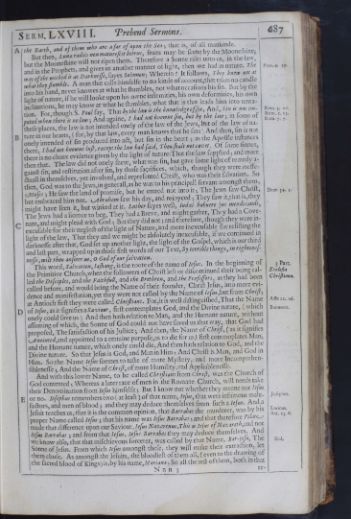 Serm. LXVIII.
Prebend Sermons.
687
the Earth, and of them who are a far ofoff upon the Sea; that is, of all mankinde.
Serm. LXVIII.
Prebend Sermons.
687
the Earth, and of them who are a far ofoff upon the Sea; that is, of all mankinde.
But then, Lunæ radiis non maturescit botrus, fruits may be seene by the Mooneshine,
but the Mooneshine will not ripen them. Therefore a Sunne rises unto us, in the law,
and in the Prophets, and gives us another manner of light, then we had in nature.Prov. 4.19. The
way of the wicked is as Darknesse, sayes Solomon; Wherein? It follows, They know not at
what they stumble. A man that calls himselfe to no kinde of account, that takes no candle
into his hand, never knowes at what he stumbles, not what occasions his sin. But by the
light of nature, if he will looke upon his owne infirmities, his own deformities, his own
inclinations, he may know at what he stumbles, what that is that leads him into tenta-
tion. For, though S. Paul say, That by the law is the knowledge of sin, And, Rom. 3.20. Sin is not im-
puted when there is no law; And againe, I had not knowne sin, but by the law; in some of Rom. 5.13.
these places, the law is not intended onely of the law of the Jews, but of the law of Rom. 7.7. na-
ture in our hearts, (for, by that law, every man knows that he sins) And then, sin is not
onely intended of sin produced into act, but sin in the heart; as the Apostle instances
there, I had not knowne lust, except the law had said, Thou shalt not covet. Of some sinnes,
there is no cleare evidence given by the light of nature: That the law supplied; and more
then that. The law did not onely shew, what was sin, but gave some light of remedy a-
gainst sin, and restitution after sin, by those sacrifices, which, though they were ineffe-
ctuall in themselves, yet involved, and represented Christ, who was their salvation. So
then, God was to the Jews, in generall, as he was to his principall servant amongst them,
Moses; He saw the land of promise, but he entred not into it; The Jews saw Christ, Deut. 34.1.
but embraced him not. Abraham saw his day, and rejoyced; They saw it, that is, they
might have seen it, but winked at it. Luther sayes well, Iudæi habuere jus mendicandi,
The Jews had a licence to beg, They had a Breve, and might gather, They had a Cove-
nant, and might plead with God; But they did not; and therefore, though they were in-
excusable for their neglect of the light of Nature, and more inexcusable for resisting the
light of the law, That they and we might be absolutely inexcusable, if we continued in
darknesse after that, God set up another light, the light of the Gospel, which is our third
and last part, wrapped up in those first words of our Text, By terrible things, in righteous-
nesse, wilt thou answer us, O God of our salvation.
This word, Salvation, Iashang, is the roote of the name of Iesus.3 Part. In the beginning of
the Primitive Church, Ecclesia
Christiana. when the followers of Christ left or discontinued their being cal-
led the Disciples, and the Faithfull, and the Brethren, and the Professors, as they had been
called before, and would bring the Name of their founder, Christ Jesus, into more evi-
dence and manifestation, yet they were not called by the Name of Iesus, but from Christ;
at Antioch first they were called Christians. For, it is well distinguished, Acts 11.26. That the Name
of Iesus, as it signifies a Saviour, first contemplates God, and the Divine nature, Bonavent. (which
onely could save us) And then hath relation to Man, and the Humane nature, without
assuming of which, the Sonne of God could not have saved us that way, that God had
proposed, The satisfaction of his Justice; And then, the Name of Christ, (as it signifies
Anointed, and appointed to a certaine purpose, as to die for us) first contemplates Man,
and the Humane nature, which onely could die, And then hath relation to God, and the
Divine nature. So that Jesus is God, and Man in Him; And Christ is Man, and God in
Him. So the Name Iesus seemes to taste of more Mystery, and more Incomprehen-
siblenesse; And the Name of Christ, of more Humility, and Appliablenesse.
And with this lower Name, to be called Christians from Christ, was the Church of
God contented; Whereas a later race of men in the Romane Church, will needs take
their Denomination from Iesus himselfe; But I know not whether they meane our Iesus
or no. Iosephus remembers two (at least) of that name, Iesus, Josephus. that were infamous male-
factors, and men of blood; and they may deduce themselves from such a Iesus. And a
Jesuit teaches us, that it is the common opinion, that Barrabas the murderer, Lorinus. was by his
proper Name called Iesus; that his name was Iesus Barrabas; and that therefore PilateAct. 13.6.
made that difference upon our Saviour, Iesus Nazarenus, This is Iesus of Nazareth, and not
Iesus Barrabas; and from that Iesus, Iesus Barrabas they may deduce themselves. And
we know also, that that mischievous sorcerer, was called by that Name, Bar-jesu, Ibid. The
Sonne of Jesus. From which Iesus amongst these, they will make their extraction, let
them chuse. As amongst the Jesuits, the bloodiest of them all, (even to the drawing of
the sacred blood of Kings) is, by his name, Mariana; So all the rest of them, both in that Nnn3 re-
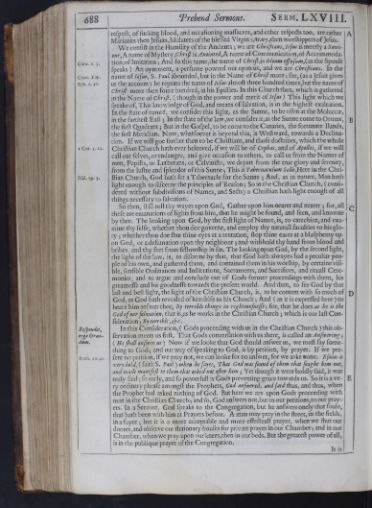 688
Prebend Sermons.
Serm. LXVIII.
respect, of sucking blood, and occasioning massacres, and other respects too, are rather
688
Prebend Sermons.
Serm. LXVIII.
respect, of sucking blood, and occasioning massacres, and other respects too, are rather
Marianits then Jesuits, Idolaters of the blessed Virgin Mary, then worshippers of Jesus.
We consist in the Humility of the Ancients; we are Christians, Iesus is meerly a Savi-
our, A name of Mystery, Christ is Anointed, A name of Communication, of Accommoda-
tion, of Imitation;Cant. 1.3. And so this name, the name of Christ, is Oleum effusum, (as the Spouse
speaks) An oyntment, a perfume powred out upon us, and we are Christians. In the
name of Iesus, Corn. Lap. S. Paul abounded, but in the Name of Christ more; for, (as a Jesuit gives
us the account) Eph. 1.10. he repeats the name of Iesus almost three hundred times, but the name of
Christ more then foure hundred, in his Epistles. In this Church then, which is gathered
in the Name of Christ, (though in the power and merit of Iesus) This light which we
speake of, This knowledge of God, and means of salvation, is in the highest exaltation.
In the state of nature, we consider this light, as the Sunne, to be risen at the Moluccæ,
in the farthest East; In the state of the law, we consider it, as the Sunne come to Ormus,
the first Quadrant; But in the Gospel, to be come to the Canaries, the fortunate Ilands,
the first Meridian. Now, whatsoever is beyond this, is Westward, towards a Declina-
tion. If we will goe farther then to be Christians, and those doctrines, which the whole
Christian Church hath ever beleeved, 1 Cor. 1.12. if we will be of Cephas, and of Apollos, if we will
call our selves, or endanger, and give occasion to others, to call us from the Names of
men, Papists, or Lutherans, or Calvinists, we depart from the true glory and serenity,
from the lustre and splendor of this Sunne; This is Tabernaculum Solis, Here in the Chri-
stian Church, Psal. 19.5. God hath set a Tabernacle for the Sunne; And, as in nature, Man hath
light enough to discerne the principles of Reason; So in the Christian Church, (consi-
dered without subdivisions of Names, and Sects) a Christian hath light enough of all
things necessary to salvation.
So then, still roll thy wayes upon God, Gather upon him nearer and nearer; for, all
these are emanations of lights from him, that he might be found, and seen, and knowne
by thee. The looking upon God, by the first light of Nature, is, to catechize, and exa-
mine thy selfe, whether thou doe governe, and employ thy naturall faculties to his glo-
ry; whether thou doe shut thine eyes at a tentation, stop thine eares at a blasphemy up-
on God, or a defamation upon thy neighbour; and withhold thy hand from blood and
bribes, and thy feet from fellowship in sin. The looking upon God, by the second light,
the light of the law, is, to discerne by that, that God hath alwayes had a peculiar peo-
ple of his own, and gathered them, and contained them in his worship, by certaine visi-
ble, sensible Ordinances and Institutions, Sacraments, and Sacrifices, and rituall Cere-
monies, and to argue and conclude out of Gods former proceedings with them, his
greatnesse and his goodnesse towards the present world. And then, to see God by that
last and best light, the light of the Christian Church, is, to be content with so much of
God, as God hath revealed of himselfe to his Church; And (as it is expressed here) to
heare him answer thee, By terrible things in righteousnesse; for, that he does as he is the
God of our salvation, that is, as he works in the Christian Church; which is our last Con-
sideration; By terrible, &c.
In this Consideration, Respondet,
ergo Oran-
dum. (Gods proceeding with us in the Christian Church) this ob-
servation meets us first, That Gods conversation with us there, is called an Answering;
(He shall answer us) Now if we looke that God should answer us, we must say some-
thing to God; and our way of speaking to God, is by petition, by prayer. If we pre-
sent no petition, Rom. 10.20. if we pray not, we can looke for no answer, for we aske none. Esaias is
very bold, (saith S. Paul) when he sayes, That God was found of them that sought him not,
and made manifest to them that asked not after him; Yet though it were boldly said, it was
truly said; so early, and so powerfull is Gods preventing grace towards us. So it is a ve-
ry ordinary phrase amongst the Prophets, God answered, and said thus, and thus, when
the Prophet had asked nothing of God. But here we are upon Gods proceeding with
man in the Christian Church; and so, God answers not, but to our petitions, to our pray-
ers. In a Sermon, God speaks to the Congregation, but he answers onely that soule,
that hath been with him at Prayers before. A man may pray in the street, in the fields,
in a fayre; but it is a more acceptable and more effectuall prayer, when we shut our
doores, and observe our stationary houses for private prayer in our Chamber; and in our
Chamber, when we pray upon our knees, then in our beds. But the greatest power of all,
is in the publique prayer of the Congregation. It is
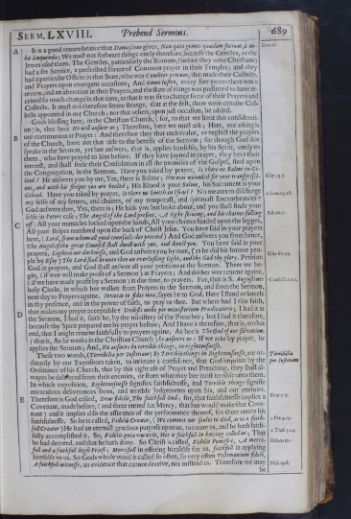 Serm. LXVIII.
Prebend Sermons.
689
Serm. LXVIII.
Prebend Sermons.
689
It is a good remembrance that Damascene gives, Damasc. Non quia gentes quædam faciunt, à no-
bis linquenda; We must not forbeare things onely therefore, because the Gentiles, or the
Jewes used them. The Gentiles, particularly the Romans, (before they were Christians)
had a set Service, a prescribed forme of Common prayer in their Temples; and they
had a particular Officer in that State, who was Conditor precum, that made their Collects,
and Prayers upon emergent occasions; And Omni lustro, every five yeares there was a
review, and an alteration in their Prayers, and the state of things was presumed to have re-
ceived so much change in that time, as that it was fit to change some of their Prayers and
Collects. It must not therefore seeme strange, that at the first, there were certaine Col-
lects appointed in our Church; nor that others, upon just occasion, be added.
Gods blessing here, in the Christian Church, (for, to that we limit this considerati-
on) is, that here He will answer us; Therefore, here we must ask; Here, our asking is
our communion at Prayer: And therefore they that undervalue, or neglect the prayers
of the Church, have not that title to the benefit of the Sermon; for though God doe
speake in the Sermon, yet hee answers, that is, applies himselfe, by his Spirit, onely to
them, who have prayed to him before. If they have joyned in prayer, they have their
interest, and shall feele their Consolation in all the promises of the Gospel, shed upon
the Congregation, in the Sermon. Have you asked by prayer, Is there no Balme in Gi-
lead? He answers you by me, Yes, there is Balme;Esay 53.5. Hee was wounded for your transgressi-
ons, and with his stripes you are healed; His Blood is your Balme, his Sacrament is your
Gilead. Have you asked by prayer, Is there no Smith in Israel?1 Sam. 13.18. No meanes to discharge
my selfe of my fetters, and chaines, of my temporall, and spirituall Encumbrances?
God answers thee, Yes, there is; He bids you but looke about, and you shall finde your
selfe in Peters case; The Angel of the Lord present, A light shining,Act. 12.7. and his chaines falling
off: All your manacles locked upon the hands, All your chaines loaded upon the legges,
All your stripes numbred upon the back of Christ Jesus. You have said in your prayers
here, (Lord, from whom all good counsails doe proceed) And God answers you from hence,
The Angel of the great Counsell shall dwell with you, and direct you. You have said in your
prayers, Lighten our darknesse, and God answers you by mee, Esay 60.19. (as he did his former peo-
ple by Esay) The Lord shall be unto thee an everlasting light, and thy God thy glory. Petition
God at prayers, and God shall answer all your petitions at the Sermon. There we be-
gin, (if wee will make profit of a Sermon) at Prayers; And thither wee returne againe,
(if we have made profit by a Sermon) in due time, to prayers. For, Confes. l.1.c.1. that is S. Augustines
holy Circle, in which hee walkes from Prayers to the Sermon, and from the Sermon,
next day to Prayers againe. Invocat te fides mea, sayes he to God; Here I stand or kneele
in thy presence, and in the power of faith, to pray to thee. But where had I this faith,
that makes my prayer acceptable? Dedisti mihi per ministerium Prædicatoris; I had it at
the Sermon, I had it, saith he, by the ministery of the Preacher; but I had it therefore,
because thy Spirit prepared me by prayer before; And I have it therefore, that is, to that
end, that I might returne faithfully to prayers againe. As hee is The God of our salvation,
(that is, As he works in the Christian Church) he answers us: If we aske by prayer, he
applies the Sermon; And, He answers by terrible things, in righteousnesse.
These two words, (Terribilia per Iustitiam) By Terrible things in Righteousnesse, Terribilia
per Iustitiam are or-
dinarily by our Expositors taken, to intimate a confidence, that God imprints by the
Ordinance of his Church, that by this right use of Prayer and Preaching, they shall al-
wayes be delivered from their enemies, or from what may bee most terrible unto them.
In which exposition, Righteousnesse signifies faithfulnesse, and Terrible things signifie
miraculous deliverances from, and terrible Judgements upon his, and our enemies.
Therefore is God called, Deus fidelis, The faithfull God; for, Deut. 7.9. that faithfulnesse implies a
Covenant, made before, (and there entred his Mercy, that hee would make that Cove-
nant) and it implies also the assurance of the performance thereof, for there enters his
faithfulnesse. So he is called, Fidelis Creator, 1 Pet. 4.19. (We commit our soules to God, as to a faith-
full Creator) He had an eternall gracious purpose upon us, to create us, and he hath faith-
fully accomplished it. So, Fidelis quia vocavit, Hee is faithfull in having called us;1 Thes. 5.24. That
he had decreed, and that he hath done. So Christ is called, Fidelis Pontifex, Heb. 2.17. A merci-
full and a faithfull high Priest; Mercifull in offering himselfe for us, faithfull in applying
himselfe to us. So Gods whole word is called so often, so very often Testimonium fidele,
A faithfull witnesse, an evidence that cannot deceive, nor mislead us.Psal. 19.8. Therefore we may be
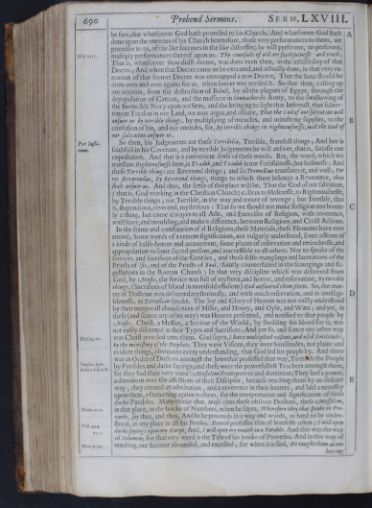 690
Prebend Sermons.
Serm. LXVIII.
be sure, that whatsoever God hath promised to his Church, (And whatsoever God hath
690
Prebend Sermons.
Serm. LXVIII.
be sure, that whatsoever God hath promised to his Church, (And whatsoever God hath
done upon the enemies of his Church heretofore, those very performances to them, are
promises to us, of the like succours in the like distresses) he will performe, re-performe,
multiply performances thereof upon us.Esay 25.1. Thy counsails of old are faithfulnesse and truth;
That is, whatsoever thou didst decree, was done even then, in the infallibility of that
Decree; And when that Decree came to be executed, and actually done, in that very ex-
ecution of that former Decree was enwrapped a new Decree, That the same should be
done over and over againe for us, when soever wee needed it. So that then, casting up
our account, from the destruction of Babel, by all the plagues of Egypt, through the
depopulation of Canaan, and the massacre in Sennacheribs Army, to the swallowing of
the Invincible Navy upon our Seas, and the bringing to light that Infernall, that subter-
ranean Treason in our Land, we may argue, and assume, That the God of our salvation will
answer us by terrible things, by multiplying of miracles, and ministring supplies, to the
confusion of his, and our enemies, for, By terrible things in righteousnesse, will the God of
our salvation answer us.
So then, Per Iusti-
tiam. his Judgements are these Terribilia, Terrible, fearefull things; And hee is
faithfull in his Covenant, and by terrible Judgements he will answer, that is, satisfie our
expectation. And that is a convenient sense of these words. But, the word, which we
translate Righteousnesse here, is Tzadok, and Tzadok is not faithfulnesse, but holinesse; And
these Terrible things are Reverend things; and so Tremellius translates it, and well; Per
res Reverendas, By Reverend things, things to which there belongs a Reverence, thou
shalt answer us. And thus, the sense of this place will be, That the God of our salvation,
(that is, God working in the Christian Church) calls us to Holinesse, to Righteousnesse,
by Terrible things; not Terrible, in the way and nature of revenge; but Terrible, that
is, stupendious, reverend, mysterious: That so we should not make Religion too home-
ly a thing, but come alwayes to all Acts, and Exercises of Religion, with reverence,
with feare, and trembling, and make a difference, between Religious, and Civill Actions.
In the frame and constitution of al Religions, these Materials, these Elements have ever
entred; Some words of a remote signification, not vulgarly understood, some actions of
a kinde of halfe-horror and amazement, some places of reservation and retirednesse, and
appropriation to some sacred persons, and inaccessible to all others. Not to speake of the
services, and sacrifices of the Gentiles, and those selfe-manglings and lacerations of the
Priests of Isis, and of the Priests of Baal, (faintly counterfaited in the scourgings and fla-
gellations in the Roman Church) In that very discipline which was delivered from
God, by Moses, the service was full of mysterie, and horror, and reservation, By terrible
things, (Sacrifices of blood in manifold effusions) God answered them, then. So, the mat-
ter of Doctrine was delivered mysteriously, and with much reservation, and in-intelligi-
blenesse, as Tertullian speaks. The Joy and Glory of Heaven was not easily understood
by their temporall abundances of Milke, and Honey, and Oyle, and Wine; and yet, in
these (and scarce any other way) was Heaven presented, and notified to that people by
Moses. Christ, a Messias, a Saviour of the World, by shedding his blood for it, was
not easily discerned in their Types and Sacrifices; And yet so, and scarce any other way
was Christ revealed unto them.Hos. 12.10. God sayes, I have multiplied visions, and used similitudes,
by the ministery of the Prophets. They were Visions, they were Similitudes, nor plaine and
evident things, obvious to every understanding, that God led his people by. And there
was an Order of Doctors amongst the Jews that professed that way, To teach the People
by Parables and darke sayings;Sandæi sym-
bolica fol. 108. and these were the powerfullest Teachers amongst them,
for they had their very name (Mosselim) from power and dominion; They had a power,
a dominion over the affections of their Disciples, because teaching them by an obscure
way, they created an admiration, and a reverence in their hearers, and laid a necessity
upon them, of returning againe to them, for the interpretation and signification of those
darke Parables. Many thinke that Moses cites these obscure Doctors, these Mosselim,
in that place, Num. 21.7. in the booke of Numbers, when he sayes, Wherefore they that speake in Pro-
verbs, say thus, and thus, And so he proceeds in a way and words, as hard to be under-
stood, Psal. 49.4. as any place in all his Books. David professes this of himselfe often; I will open
darke sayings upon my Harpe, 77.2. And, I will open my mouth in a Parable. And this was the way
of Solomon; for that very word is the Title of his booke of Proverbs. And in this way of
teaching, Matt. 7.19. our Saviour abounded, and excelled; for when it is said, He taught them as one having
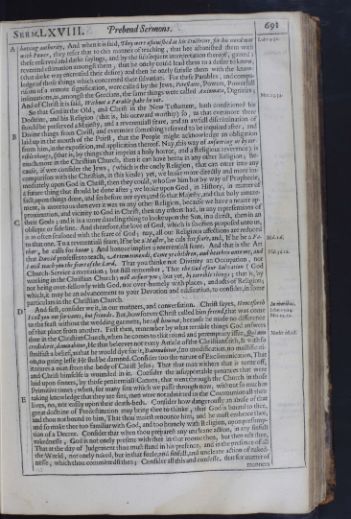 Serm. LXVIII.
Prebend Sermons.
691
having authority, And when it is said, They were astonished at his Doctrine,Luke 4.32. for his word was
Serm. LXVIII.
Prebend Sermons.
691
having authority, And when it is said, They were astonished at his Doctrine,Luke 4.32. for his word was
with Power, they refer that to this manner of teaching, that hee astonished them with
these reserved and darke sayings, and by the subsequent interpretation thereof, gained a
reverend estimation amongst them, that he onely could lead them to a desire to know,
(that darke way encreased their desire) and then he onely satisfie them with the know-
ledge of those things which concerned their salvation. For these Parables, and compa-
risons of a remote signification, were called by the Jews, Potestates, Powers, Powerfull
insinuations, as, amongst the Grecians, the same things were called Axiomata, Dignities;
And of Christ it is said, Without a Parable spake he not.Mat. 13.34.
So that God in the Old, and Christ in the New Testament, hath conditioned his
Doctrine, and his Religion (that is, his outward worship) so, as that evermore there
should be preserved a Majesty, and a reverentiall feare, and an awfull discrimination of
Divine things from Civill, and evermore something reserved to be inquired after, and
laid up in the mouth of the Priest, that the People might acknowledge an obligation
from him, in the exposition, and application thereof. Nay, this way of answering us by ter-
rible things, (that is, by things that imprint a holy horror, and a Religious reverence) is
much more in the Christian Church, then it can have beene in any other Religion; Be-
cause, if wee consider the Jews, (which is the onely Religion, that can enter into any
comparison with the Christian, in this kinde) yet, we looke more directly and more im-
mediately upon God in Christ, then they could, who saw him but by way of Prophecie,
a future thing that should be done after; we looke upon God, in History, in matter of
fact, upon things done, and set before our eyes; and so that Majesty, and that holy amaze-
ment, is more to us then ever it was to any other Religion, because we have a nearer ap-
proximation, and vicinity to God in Christ, then any others had, in any representions of
their Gods; and it is a more dazeling thing to looke upon the Sun, in a direct, then in an
oblique or side line. And therefore, the love of God, which is so often proposed unto us,
is as often seasoned with the feare of God; nay, all our Religious affections are reduced
to that one, To a reverentiall feare; If he be a Master, he cals for feare, and, Mal. 1.6. If he be a Fa-
ther, he calls for honor; And honour implies a reverentiall feare. And that is the Art
that David professes to teach, Artem timendi, Come ye children, and hearken unto me, Psal. 34.12. and
I will teach you the feare of the Lord. That you thinke not Divinity an Occupation, nor
Church-Service a recreation; but still remember, That the God of our Salvation (God
working in the Christian Church) will answer you; but yet, by terrible things; that is, by
not being over-fellowly with God, nor over-homely with places, and acts of Religion;
which, it may be an advancement to your Devotion and edification, to consider, in some
particulars in the Christian Church.
And first, consider we it, in our manners, and conversation. Christ sayes, In moribus. Henceforth
I call you not servants, but friends. But, howsoever Christ called him friend, that was come Iohn 15.14.
to the feast without the wedding garment, he cast him out, because he made no difference Mat. 22.12.
of that place from another. First then, remember by what terrible things God answers
thee in the Christian Church, when he comes to that round and peremptory issue, Marke 16.16. Qui non
crediderit, damnabitur, He that beleeves not every Article of the Christian faith, & with so
stedfast a belief, as that he would dye for it, Damnabitur, (no modification, no mollificati-
on, no going lesse) He shal be damned. Consider too the nature of Excōmunication, That
it teares a man from the body of Christ Jesus; That that man withers that is torne off,
and Christ himselfe is wounded in it. Consider the insupportable penances that were
laid upon sinners, by those penitentiall Canons, that went through the Church in those
Primitive times; when, for many sins which we passe through now, without so much as
taking knowledge that they are sins, men were not admitted to the Communion all their
lives, no, nor easily upon their death-beds. Consider how dangerously an abuse of that
great doctrine of Predestination may bring thee to thinke, that God is bound to thee,
and thou not bound to him, That thou maiest renounce him, and he must embrace thee,
and so make thee too familiar with God, and too homely with Religion, upon presump-
tion of a Decree. Consider that when thou preparest any uncleane action, in any sinfull
nakednesse, God is not onely present with thee in that roome then, but then tels thee,
That at the day of Judgement thou must stand in his presence, and in the presence of all
the World, not onely naked, but in that foule, and sinfull, and uncleane action of naked-
nesse, which thou committedst then; Consider all this and confesse, that for matter of manners
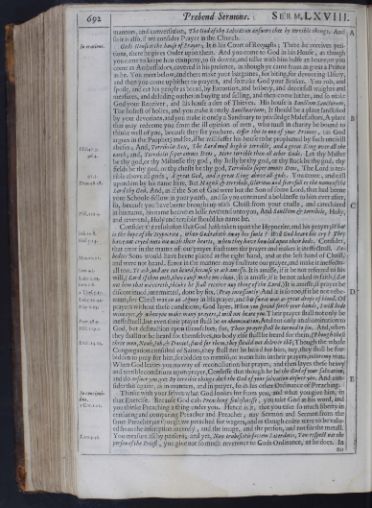 692
Prebend Sermons.
Serm. LXVIII.
manners, and conversation, The God of thy Salvation answers thee by terrible things. And
692
Prebend Sermons.
Serm. LXVIII.
manners, and conversation, The God of thy Salvation answers thee by terrible things. And
so it is also, if we consider Prayer in the Church.
Gods House is the house of Prayer;In oratione. It is his Court of Requests; There he receives peti-
tions, there he gives Order upon them. And you come to God in his House, as though
you came to keepe him company, to sit downe, and talke with him halfe an houre; or you
come as Ambassadors, covered in his presence, as though ye came from as great a Prince
as he. You meet below, and there make your bargaines, for biting, for devouring Usury,
and then you come up hither to prayers, and so make God your Broker. You rob, and
spoile, and eat his people as bread, by Extortion, and bribery, and deceitfull waights and
measures, and deluding oathes in buying and selling, and then come hither, and so make
God your Receiver, and his house a den of Thieves. His house is Sanctum Sanctorum,
The holiest of holies, and you make it onely Sanctuarium; It should be a place sanctified
by your devotions, and you make it onely a Sanctuary to priviledge Malefactors, A place
that may redeeme you from the ill opinion of men, who must in charity be bound to
thinke well of you, because they see you here. Offer this to one of your Princes, (as God
argues in the Prophet) and see, if he will suffer his house to be prophaned by such uncivill
abuses;Psal. 47.3. And, Terribilis Rex, The Lord most high is terrible, and a great King over all the
earth;96.4. and, Terribilis super omnes Deos, More terrible then all other Gods. Let thy Master
be thy god, or thy Mistresse thy god, thy Belly be thy god, or thy Back be thy god, thy
fields be thy god, or thy chests be thy god, Terribilis super omnes Deos, The Lord is ter-
rible above all gods, 95.3. A great God, and a great King above all gods. You come, and call
upon him by his name here, But Magnū & terribile, Glorious and fearefull is the name of the Deut. 28.58.
Lord thy God. And, as if the Son of God were but the Son of some Lord, that had beene
your Schoole-fellow in your youth, and so you continued a boldnesse to him ever after,
so, because you have beene brought up with Christ from your cradle, and catechized
in his name, Psal. 111.4. his name becomes lesse reverend unto you, And Sanctum & terribile, Holy,
and reverend, Holy and terrible should his name be.
Consider the resolution that God hath taken upon the Hypocrite, and his prayer; What
is the hope of the Hypocrite,Iob 27.8. when God taketh away his soule? Will God heare his cry? They
have not cryed unto me with their hearts, when they have howled upon their beds. Consider, Hos . 7.14.
that error in the matter of our prayer frustrates the prayer and makes it ineffectuall. Ze-
bedees Sons would have beene placed at the right hand, Mat. 20.21. and at the left hand of Christ,
and were not heard. Error in the manner may frustrate our prayer, and make it ineffectu-
all too.Iam. 4.3. Ye ask, and are not heard, because ye ask amisse. It is amisse, if it be not referred to his
will, Luke 5.12. (Lord if thou wilt, thou canst make me clean.) It is amisse, if it be not asked in faith, (Let
not him that wavereth, thinke he shall receive any thing of the Lord.) It is amisse, if prayer be Iam. 1.6.
discontinued, 1 Thes. 5.17. intermitted, done by fits, (Pray incessantly) And it is so too, if it be not vehe-
ment; for Christ was in an Agony in his prayer, and his sweat was as great drops of blood. Of Luke 22.44.
prayers without these conditions, God sayes, When you spread forth your hands, I will hide Esay . 1.15.
mine eyes, & when you make many prayers, I will not heare you. Their prayer shall not only be
ineffectuall, Prov. 28.9. but even their prayer shall be an abomination; And not only an abomination to
God, but destruction upon themselves; for, Their prayer shall be turned to sin. And, when Psal. 109.7.
they shall not be heard for themselves, no body else shall be heard for them; (Though these
three men, Ezek. 14.14. Noah, Iob, & Daniel, stood for them, they should not deliver thē); Though the whole
Congregation consisted of Saints, they shall not be heard for him, nay, they shall be for-
bidden to pray for him, forbidden to mentiō, or mean him in their prayers, as Ieremy was.
When God leaves you no way of reconciliation but prayer, and then layes these heavy
and terrible conditions upon prayer; Confesse that though he be the God of your salvation,
and do answer you, yet By terrible things doth the God of your salvation answer you. And con-
sider this againe, as in manners, and in prayer, so in his other Ordinance of Preaching.
Thinke with your selves what God lookes for from you, In concioni-
bus. and what you give him, in
that Exercise. Because God cals Preaching foolishnesse, you take God at his word, and
you thinke Preaching a thing under you. Hence is it, that you take so much liberty in 1 Cor. 1.21.
censuring and comparing Preacher and Preacher, nay Sermon and Sermon from the
same Preacher; as though we preached for wagers, and as though coine were to be valu-
ed from the inscription meerely, and the image, and the person, and not for the metall.
You measure all by persons;Lam. 4.16. and yet, Non erubescit is faciem Sacerdotis, You respect not the
person of the Priest, you give not so much reverence to Gods Ordinance, as he does. In no
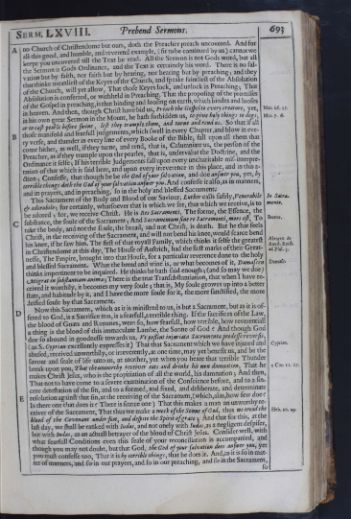 Serm. LXVIII.
Prebend Sermons.
693
no Church of Christendome but ours, doth the Preacher preach uncovered. And for
Serm. LXVIII.
Prebend Sermons.
693
no Church of Christendome but ours, doth the Preacher preach uncovered. And for
all this good, and humble, and reverend example, (fit to be continued by us) cannot we
keepe you uncovered till the Text be read. All the Sermon is not Gods word, but all
the Sermon is Gods Ordinance, and the Text is certainely his word. There is no sal-
vation but by faith, nor faith but by hearing, nor hearing but by preaching; and they
that thinke meanliest of the Keyes of the Church, and speake faintliest of the Absolution
of the Church, will yet allow, That those Keyes lock, and unlock in Preaching; That
Absolution is conferred, or withheld in Preaching, That the proposing of the promises
of the Gospel in preaching, is that binding and loosing on earth, which bindes and looses
in heaven. And then, though Christ have bid us, Preach the Gospel to every creature, Mar. 16.15. yet,
in his own great Sermon in the Mount, he hath forbidden us, Mat. 7.6. to give holy things to dogs,
or to cast pearle before swine, lest they trample them, and turne and rend us. So that if all
those manifold and fearfull judgements, which swell in every Chapter, and blow in eve-
ry verse, and thunder in every line of every Booke of the Bible, fall upon all them that
come hither, as well, if they turne, and rend, that is, Calumniate us, the person of the
Preacher, as if they trample upon the pearles, that is, undervalue the Doctrine, and the
Ordinance it selfe; If his terrible Judgements fall upon every uncharitable mis-interpre-
tation of that which is said here, and upon every irreverence in this place, and in this a-
ction; Confesse, that though he be the God of your salvation, and doe answer you, yet, by
terrible things doth the God of your salvation answer you. And confesse it also, as in manners,
and in prayers, and in preaching, so in the holy and blessed Sacrament.
This Sacrament of the Body and Blood of our Saviour, Luther calls safely, In Sacra-
mento. Venerabile
& adorabile; for certainly, whatsoever that is which we see, that which we receive, is to
be adored; for, we receive Christ. He is Res Sacramenti, The forme, the Essence, the
substance, the soule of the Sacrament; And Sacramentum sine re Sacramenti, mors est, Bernar. To
take the body, and not the soule, the bread, and not Christ, is death. But he that feels
Christ, in the receiving of the Sacrament, and will not bend his knee, would scarce bend
his knee, if he saw him. The first of that royall Family, Alvarez de
Auxil. Epist.
ad Phil. 3. which thinks it selfe the greatest
in Christendome at this day, The House of Austrich, had the first marks of their Great-
nesse, The Empire, brought into that House, for a particular reverence done to the holy
and blessed Sacrament. What the bread and wine is, or what becomes of it, Damasc. Damascen
thinks impertinent to be inquired. He thinks he hath said enough; (and so may we doe)
Migrat in substantiam animæ; There is the true Transubstantiation, that when I have re-
ceived it worthily, it becomes my very soule; that is, My soule growes up into a better
state, and habitude by it, and I have the more soule for it, the more sanctified, the more
deified soule by that Sacrament.
Now this Sacrament, which as it is ministred to us, is but a Sacrament, but as it is of-
fered to God, is a Sacrifice too, is a fearfull, a terrible thing: If the sacrifices of the Law,
the blood of Goats and Rammes, were so, how fearfull, how terrible, how reverentiall
a thing is the blood of this immaculate Lambe, the Sonne of God? And though God
doe so abound in goodnesse towards us, Vt possint injuriata Sacramenta prodesse reversis,
Cyprian. (as S. Cyprian excellently expresses it) That that Sacrament which we have injured and
abused, received unworthily, or irreverently, at one time, may yet benefit us, and be the
savour and seale of life unto us, at another, yet when you heare that terrible Thunder
break upon you, That the unworthy receiver eats and drinks his own damnation, 1 Cor. 11.27. That he
makes Christ Jesus, who is the propitiation of all the world, his damnation; And then,
That not to have come to a severe examination of the Conscience before, and to a sin-
cere detestation of the sin, and to a formed, and fixed, and deliberate, and determinate
resolution against that sin, at the receiving of the Sacrament, (which, alas, how few doe?
Is there one that does it? There is scarce one) That this makes a man an unworthy re-
ceiver of the Sacrament, That thus we make a mock of the Sonne of God, Heb. 10.29. thus we tread the
blood of the Covenant under foot, and despite the Spirit of grace; And that for this, at the
last day, we shall be ranked with Iudas, and not onely with Iudas, as a negligent despiser,
but with Iudas, as an actuall betrayer of the blood of Christ Jesus. Consider well, with
what fearfull Conditions even this seale of your reconciliation is accompanied, and
though you may not doubt, but that God, the God of your salvation does answer you, yet
you must confesse too, That it is by terrible things, that he does it. And, as it is so in mat-
ter of manners, and so in our prayers, and so in our preaching, and so in the Sacrament, so
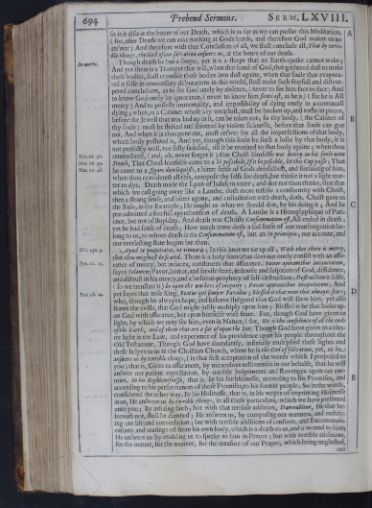 694
Prebend Sermons.
Serm. LXVIII.
so is it also at the houre of our Death, which is as far as we can pursue this Meditation,
694
Prebend Sermons.
Serm. LXVIII.
so is it also at the houre of our Death, which is as far as we can pursue this Meditation,
(for, after Death we can aske nothing at Gods hands, and therefore God makes us no
answer) And therefore with that Conclusion of all, we shall conclude all, That by terri-
ble things, the God of our salvation answers us, at the houre of our death.
Though death be but a sleepe, In morte. yet it is a sleepe that an Earth-quake cannot wake;
And yet there is a Trumpet that will, when that hand of God, that gathered dust to make
these bodies, shall crumble these bodies into dust againe, when that soule that evapora-
ted it selfe in unnecessary disputations in this world, shall make such fearfull and distem-
pered conclusions, as to see God onely by absence, (never to see him face to face) And
to know God onely by ignorance, (never to know him sicuti est, as he is) (for he is All
mercy) And to possesse immortality, and impossibility of dying onely in a continuall
dying; when, as a Cabinet whose key were lost, must be broken up, and torne in pieces,
before the Jewell that was laid up in it, can be taken out; so thy body, (the Cabinet of
thy soule) must be shaked and shivered by violent sicknesse, before that soule can goe
out, And when it is thus gone out, must answer for all the imperfections of that body,
which body polluted it, And yet, though this soule be such a loser by that body, it is
not perfectly well, nor fully satisfied, till it be reunited to that body againe; when thou
remembrest, Mat. 26.36. (and, oh, never forget it) that Christ himselfe was heavy in his soule unto
Death, Mat. 26.39. That Christ himselfe came to a Si possibile, If it be possible, let this Cup passe; That
he came to a Quare dereliquisti, Mat. 27.46. a bitter sense of Gods dereliction, and forsaking of him,
when thou considerest all this, compose thy selfe for death, but thinke it not a light mat-
ter to dye. Death made the Lyon of Judah to roare; and doe not thou thinke, that that
which we call going away like a Lambe, doth more testifie a conformity with Christ,
then a strong sense, and bitter agony, and colluctation with death, doth. Christ gave us
the Rule, in the Example; He taught us what we should doe, by his doing it; And he
pre-admitted a fearfull apprehension of death. A Lambe is a Hieroglyphique of Pati-
ence, but not of stupidity. And death was Christs Consummatum est, All ended in death;
yet he had sense of death; How much more doth a sad sense of our transmigration be-
long to us, to whom death is no Consummatum est, but an In principio; our account, and
our everlasting state begins but then.
Apud te propitiatio, Psal. 130.4. ut timearis; In this knot we tie up all; With thee there is mercy,
that thou mightest be feared. There is a holy feare, that does not onely consist with an assu-
rance of mercy, Pro. 21.15. but induces, constitutes that assurance. Pavor operantibus iniquitatem,
sayes Solomon; Pavor, horror, and servile feare, jealousie and suspition of God, diffidence,
and distrust in his mercy, and a bosome-prophecy of self-destruction; Destruction it selfe,
(so we translate it) be upon the workers of iniquity; Pavor operantibus iniquitatem; And
yet sayes that wise King, Pro. 28.14. Beatus qui semper Pavidus; Blessed is that man that alwayes fears;
who, though he alwayes hope, and beleeve the good that God will shew him, yet also
feares the evills, that God might justly multiply upon him; Blessed is he that looks up-
on God with assurance, but upon himselfe with feare. For, though God have given us
light, by which we may see him, even in Nature, (for, He is the confidence of all the ends
of the Earth, and of them that are a far ofoff upon the Sea) Though God have given us a clea-
rer light in the Law, and experience of his providence upon his people throughout the
Old Testament, Though God have abundantly, infinitely multiplied these lights and
these helpes to us in the Christian Church, where he is the God of salvation, yet, as he
answers us by terrible things, (in that first acceptation of the words which I proposed to
you) that is, Gives us assurances, by miraculous testimonies in our behalfe, that he will
answer our patient expectation, by terrible Judgements and Revenges upon our ene-
mies, In his Righteousnesse, that is, In his faithfulnesse, according to his Promises, and
according to his performances of those Promises, to his former people; So in the words,
considered the other way, In his Holinesse, that is, in his wayes of imprinting Holinesse
in us, He answers us by terrible things, in all those particulars, which we have presented
unto you; By infusing faith; but with that terrible addition, Damnabitur, He that be-
leeveth not, shall be damned; He answers us, by composing our manners, and rectify-
ing our life and conversation; but with terrible additions of censures, and Excommuni-
cations, and tearings off from his own body, which is a death to us, and a wound to him;
He answers us by enabling us to speake to him in Prayer; but with terrible additions,
for the matter, for the manner, for the measure of our Prayer, which being neglected, our
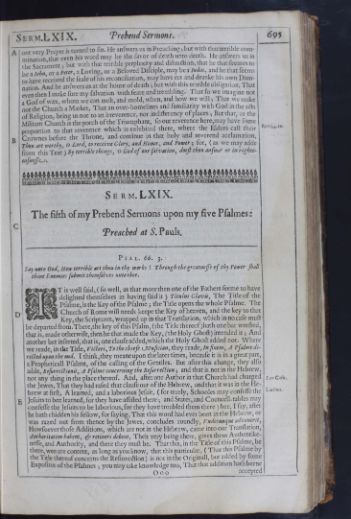 Serm. LXIX.
Prebend Sermons.
695
our very Prayer is turned to sin. He answers us in Preaching; but with that terrible com-
Serm. LXIX.
Prebend Sermons.
695
our very Prayer is turned to sin. He answers us in Preaching; but with that terrible com-mination, that even his word may be the savor of death unto death. He answers us in
the Sacrament; but with that terrible perplexity and distraction, that he that seemes to
be a Iohn, or a Peter, a Loving, or a Beloved Disciple, may be a Iudas, and he that seems
to have received the seale of his reconciliation, may have eat and drunke his own Dam-
nation. And he answers us at the houre of death; but with this terrible obligation, That
even then I make sure my salvation with feare and trembling. That so we imagine not
a God of wax, whom we can melt, and mold, when, and how we will; That we make
not the Church a Market, That an over-homelines and familiarity with God in the acts
of Religion, bring us not to an irreverence, nor indifferency of places; But that, as the
Militant Church is the porch of the Triumphant, so our reverence here, may have some
proportion to that reverence which is exhibited there, Revel. 4.10. where the Elders cast their
Crownes before the Throne, and continue in that holy and reverend acclamation,
Thou art worthy, O Lord, to receive Glory, and Honor, and Power; for, (as we may adde
from this Text) By terrible things, O God of our salvation, doest thou answer us in righte-
ousnesse.
Serm. LXIX.
The fifth of my Prebend Sermons upon my five Psalmes:
Preached at S. Pauls.
Psal. 66.3.
Say unto God, How terrible art thou in thy works! Through the greatnesse of thy Power shall
thine Enemies submit themselves unto thee.
ITIt is well said, (so well, as that more then one of the Fathers seeme to have
delighted themselves in having said it) Titulus Clavis, The Title of the
Psalme, is the Key of the Psalme; the Title opens the whole Psalme. The
Church of Rome will needs keepe the Key of heaven, and the key to that
Key, the Scriptures, wrapped up in that Translation, which in no case must
be departed from. There, the key of this Psalm, (the Title thereof) hath one bar wrested,
that is, made otherwise, then he that made the Key, (the Holy Ghost) intended it; And
another bar inserted, that is, one clause added, which the Holy Ghost added not. Where
we reade, in the Title, Victori, To the chiefe Musician, they reade, In finem, A Psalme di-
rected upon the end. I think, they meane upon the later times, because it is in a great part,
a Propheticall Psalme, of the calling of the Gentiles. But after this change, they also
adde, Resurrectionis, A Psalme concerning the Resurrection; and that is not in the Hebrew,
nor any thing in the place thereof. And, after one Author in that Church had charged Leo Castr.
the Jewes, That they had rased that clause out of the Hebrew, and that it was in the He-
brew at first, A learned, and a laborious Jesuit, (for truely, Lorinus. Schooles may confesse the
Jesuits to bee learned, for they have assisted there; and States, and Councell-tables may
confesse the Jesuits to be laborious, for they have troubled them there) hee, I say, after
he hath chidden his fellow, for saying, That this word had ever been in the Hebrew, or
was razed out from thence by the Jewes, concludes roundly, Vndecunque advenerit,
Howsoever those Additions, which are not in the Hebrew, came into our Translation,
Authoritatem habent, & retineri debent, Their very being there, gives them Authentike-
nesse, and Authority, and there they must be. That this, in the Title of this Psalme, be
there, wee are content, as long as you know, that this particular, (That this Psalme by
the Title thereof concerns the Resurrection) is not in the Originall, but added by some
Expositor of the Psalmes; you may take knowledge too, That that addition hath beene Ooo accepted
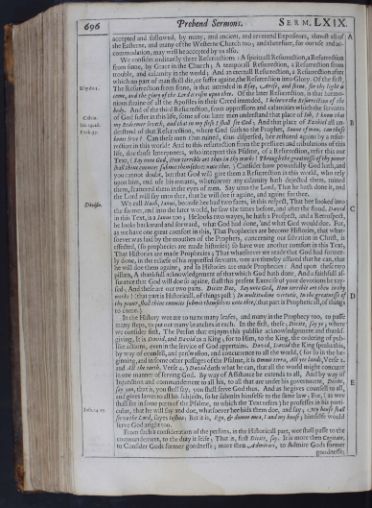 696
Prebend Sermons.
Serm. LXIX.
accepted and followed, by many, and ancient, and reverend Expositors, almost all of
696
Prebend Sermons.
Serm. LXIX.
accepted and followed, by many, and ancient, and reverend Expositors, almost all of
the Easterne, and many of the Westerne Church too; and therefore, for our use and ac-
commodation, may well be accepted by us also.
We consider ordinarily three Resurrections: A spirituall Resurrection, a Resurrection
from sinne, by Grace in the Church; A temporall Resurrection, a Resurrection from
trouble, and calamity in the world; And an eternall Resurrection, a Resurrection after
which no part of man shall die, or suffer againe, the Resurrection into Glory. Of the first,
The Resurrection from sinne, Esay . 60.1. is that intended in Esay, Arise, and shine, for thy light is
come, and the glory of the Lord is risen upon thee. Of the later Resurrection, is that harmo-
nious straine of all the Apostles in their Creed intended, I beleeve the Resurrection of the
body. And of the third Resurrection, from oppressions and calamities which the servants
of God suffer in this life, Calvin. some of our later men understand that place of Iob, I know that
my Redeemer liveth, and that in my flesh I shall see God; And that place of Ezekiel all Iob 19.26. un-
derstand of that Resurrection, where God saith to the Prophet, Ezek. 37. Sonne of man, can these
bones live? Can these men thus ruined, thus dispersed, bee restored againe by a resur-
rection in this world? And to this resurrection from the pressures and tribulations of this
life, doe those Interpreters, who interpret this Psalme, of a Resurrection, refer this our
Text, (Say unto God, How terrible art thou in thy works! Through the greatnesse of thy power
shall thine enemies submit themselves unto thee.) Consider how powerfully God hath, and
you cannot doubt, but that God will give them a Resurrection in this world, who rely
upon him, and use his meanes, whensoever any calamity hath dejected them, ruined
them, scattered them in the eyes of men. Say unto the Lord, That he hath done it, and
the Lord will say unto thee, that he will doe it againe, and againe for thee.
We call Noah, Divisio. Ianus, because hee had two faces, in this respect, That hee looked into
the former, and into the later world, he saw the times before, and after the flood. David
in this Text, is a Ianus too; He looks two wayes, he hath a Prospect, and a Retrospect,
he looks backward and forward, what God had done, and what God would doe. For,
as we have one great comfort in this, That Prophecies are become Histories, that what-
soever was said by the mouthes of the Prophets, concerning our salvation in Christ, is
effected, (so prophecies are made histories) so have wee another comfort in this Text,
That Histories are made Prophecies; That whatsoever we reade that God had former-
ly done, in the reliefe of his oppressed servants, wee are thereby assured that he can, that
he will doe them againe; and so Histories are made Prophecies: And upon these two
pillars, A thankfull acknowledgement of that which God hath done, And a faithfull as-
surance that God will doe so againe, shall this present Exercise of your devotions be ray-
sed; And these are our two parts. Dicite Deo, Say unto God, How terrible art thou in thy
works! (that part is Historicall, of things past) In multitudine virtutis, In the greatnesse of
thy power, shall thine enemies submit themselves unto thee, (that part is Propheticall, of things
to come.)
In the History wee are to turne many leafes, and many in the Prophecy too, to passe
many steps, to put out many branches in each. In the first, these; Dicite, say ye; where
we consider first, The Person that enjoyns this publike acknowledgement and thanks-
giving, It is David, and David as a King; for to Him, to the King, the ordering of pub-
like actions, even in the service of God appertains. David, David the King speaks this,
by way of counsell, and perswasion, and concurrence to all the world, (for so in the be-
ginning, and in some other passages of the Psalme, it is Omnis terra, All yee lands, Verse 1.
and All the earth, Verse 4.) David doth what he can, that all the world might concurre
in one manner of serving God. By way of Assistance he extends to all, And by way of
Injunction and commandement to all his, to all that are under his government, Dicite,
say you, that is, you shall say, you shall serve God thus. And as he gives counsell to all,
and gives lawes to all his subjects, so he submits himselfe to the same law; For, (as wee
shall see in some parts of the Psalme, to which the Text refers) he professes in his parti-
cular, that he will say and doe, Iosh. 24.15. whatsoever hee bids them doe, and say; My house shall
serve the Lord, sayes Ioshua; But it is, Ego, & domus mea, I and my house; himselfe would
serve God aright too.
From such a consideration of the persons, in the Historicall part, wee shall passe to the
commandement, to the duty it selfe; That is, first Dicite, say. It is more then Cogitate,
to Consider Gods former goodnesse; more then Admirari, to Admire Gods former goodnesse;
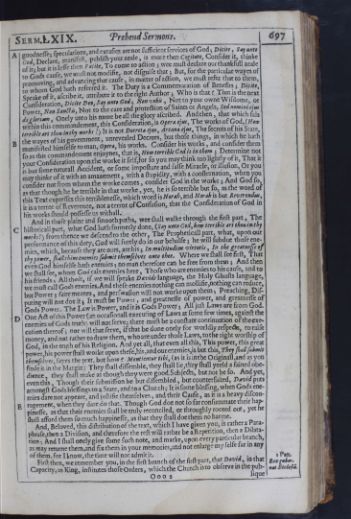 Serm. LXIX.
Prebend Sermons.
697
goodnesse; speculations, and extasies are not sufficient services of God; Dicite, Say unto
Serm. LXIX.
Prebend Sermons.
697
goodnesse; speculations, and extasies are not sufficient services of God; Dicite, Say unto
God, Declare, manifest, publish your zeale, is more then Cogitate, Consider it, thinke
of it; but it is lesse then Facite, To come to action; wee must declare our thankfull zeale
to Gods cause, we must not modifie, not disguise that; But, for the particular wayes of
promoving, and advancing that cause, in matter of action, we must refer that to them,
to whom God hath referred it. The Duty is a Commemoration of Benefits; Dicite,
Speake of it, ascribe it, attribute it to the right Author; Who is that? That is the next
Consideration, Dicite Deo, Say unto God; Non vobis, Not to your owne Wisdome, or
Power, Non Sanctis, Not to the care and protection of Saints or Angels, Sed nomini ejus
da gloriam, Onely unto his name be all the glory ascribed. And then, that which fals
within this commandement, this Consideration, is Opera ejus, The works of God, (How
terrible art thou in thy works!) It is not Decreta ejus, Arcana ejus, The secrets of his State,
the wayes of his government, unrevealed Decrees, but those things, in which he hath
manifested himselfe to man, Opera, his works. Consider his works, and consider them
so as this commandement enjoynes, that is, How terrible God is in them; Determine not
your Consideration upon the worke it self, for so you may think too lightly of it, That it
is but some naturall Accident, or some imposture and false Miracle, or illusion, Or you
may thinke of it with an amazement, with a stupidity, with a consternation, when you
consider not from whom the worke comes, consider God in the worke; And God so,
as that though he be terrible in that worke, yet, he is so terrible but so, as the word of
this Text expresses this terriblenesse, which word is Norah, and Norah is but Reverendus,
it is a terror of Reverence, not a terror of Confusion, that the Consideration of God in
his works should possesse us withall.
And in those plaine and smooth paths, wee shall walke through the first part, The
historicall part, what God hath formerly done, (Say unto God, how terrible art thou in thy
works!) from thence we descend to the other, The Propheticall part, what, upon our
performance of this duty, God will surely do in our behalfe; he will subdue those ene-
mies, which, because they are ours, are his; In multitudine virtutis, In the greatnesse of
thy power, shall thine enemies submit themselves unto thee. Where we shall see first, That
even God himselfe hath enemies; no man therefore can be free from them; And then
we shall see, whom God cals enemies here, Those who are enemies to his cause, and to
his friends; All those, if we will speake Davids language, the Holy Ghosts language,
we must call Gods enemies. And these enemies nothing can mollifie, nothing can reduce,
but Power; faire meanes, and perswasion will not worke upon them; Preaching, Dis-
puting will not doe it; It must be Power, and greatnesse of power, and greatnesse of
Gods Power. The Law is Power, and it is Gods Power; All just Laws are from God.
One Act of this Power (an occasionall executing of Laws at some few times, against the
enemies of Gods truth) will not serve; there must be a constant continuation of the exe-
cution thereof; nor will that serve, if that be done onely for worldly respects, to raise
money, and not rather to draw them, who are under those Laws, to the right worship of
God, in the truth of his Religion. And yet all, that even all this, This power, this great
power, his power shall worke upon these, his, and our enemies, is but this, They shall submit
themselves, sayes the text, but how? Mentientur tibi, (as it is in the Originall, and as you
finde it in the Margin) They shall dissemble, they shall lie, they shall yeeld a fained obe-
dience, they shall make as though they were good Subjects, but not be so. And yet,
even this, Though their submission be but dissembled, but counterfaited, David puts
amongst Gods blessings to a State, and to a Church; It is some blessing, when Gods ene-
mies dare not appeare, and justifie themselves, and their Cause, as it is a heavy discou-
ragement, when they dare do that. Though God doe not so far consummate their hap-
pinesse, as that their enemies shall be truly reconciled, or throughly rooted out, yet he
shall afford them so much happinesse, as that they shall doe them no harme.
And, Beloved, this distribution of the text, which I have given you, is rather a Para-
phrase, then a Division, and therefore the rest will rather be a Repetition, then a Dilata-
tion; And I shall onely give some such note, and marke, upon every particular branch,
as may returne them, and fix them in your memories, and not enlarge my selfe far in any
of them, for I know, the time will not admit it.
First then, we remember you, in the first branch of the first part, that David, 1 Part. in that
Capacity, as King, institutes those Orders, which the Church Rex guber-
nat Ecclesiā. is to observe in the pub-
Ooo2 lique
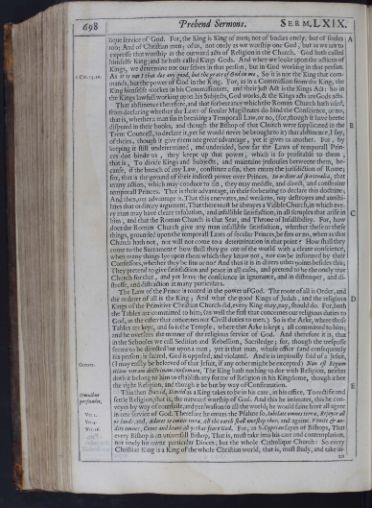 698
Prebend Sermons.
Serm. LXIX.
lique service of God. For, the King is King of men; not of bodies onely, but of soules
698
Prebend Sermons.
Serm. LXIX.
lique service of God. For, the King is King of men; not of bodies onely, but of soules
too; And of Christian men; of us, not onely as we worship one God, but as we are to
expresse that worship in the outward acts of Religion in the Church. God hath called
himselfe King; and he hath called Kings Gods. And when we looke upon the actions of
Kings, we determine not our selves in that person, but in God working in that person.
As it is not I that doe any good, 1 Cor. 15.10. but the grace of God in me, So it is not the King that com-
mands, but the power of God in the King. For, as in a Commission from the King, the
King himselfe workes in his Commissioners, and their just Act is the Kings Act: So in
the Kings lawfull working upon his Subjects, God works, & the Kings acts are Gods acts.
That abstinence therefore, and that forbearance which the Roman Church hath used,
from declaring whether the Laws of secular Magistrates do bind the Conscience, or no,
that is, whether a man sin in breaking a Temporall Law, or no, (for, though it have beene
disputed in their books, and though the Bishop of that Church were supplicated in the
Trent Councell, to declare it, yet he would never be brought to it) that abstinence, I say,
of theirs, though it give them one great advantage, yet it gives us another. For, by
keeping it still undetermined, and undecided, how far the Laws of temporall Prin-
ces doe binde us, they keepe up that power, which is so profitable to them,
that is, To divide Kings and Subjects, and maintaine jealousies betweene them, be-
cause, if the breach of any Law, constitute a sin, then enters the jurisdiction of Rome;
for, that is the ground of their indirect power over Princes, In ordine ad spiritualia, that
in any action, which may conduce to sin, they may meddle, and direct, and constraine
temporall Princes. That is their advantage, in their forbearing to declare this doctrine;
And then, our advantage is, That this enervates, and weakens, nay destroyes and annihi-
lates that ordinary argument, That there must be alwayes a Visible Church, in which eve-
ry man may have cleare resolution, and infallible satisfaction, in all scruples that arise in
him, and that the Roman Church is that Seat, and Throne of Infallibility. For, how
does the Roman Church give any man infallible satisfaction, whether these or these
things, grounded upon the temporall Laws of secular Princes, be sins or no, when as that
Church hath not, nor will not come to a determination in that point? How shall they
come to the Sacrament? how shall they go out of the world with a cleare conscience,
when many things lye upon them which they know not, nor can be informed by their
Confessors, whether they be sins or no? And thus it is in divers other points besides this;
They pretend to give satisfaction and peace in all cases, and pretend to be the onely true
Church for that, and yet leave the conscience in ignorance, and in distemper, and di-
stresse, and distraction in many particulars.
The Law of the Prince is rooted in the power of God. The roote of all is Order, and
the orderer of all is the King; And what the good Kings of Judah, and the religious
Kings of the Primitive Christian Church did, every King may, nay, should do. For, both
the Tables are committed to him; (as well the first that concernes our religious duties to
God, as the other that concernes our Civill duties to men.) So is the Arke, where those
Tables are kept, and so is the Temple, where that Arke is kept; all committed to him;
and he oversees the manner of the religious service of God. And therefore it is, that
in the Schooles we call Sedition and Rebellion, Sacriledge; for, though the trespasse
seeme to be directed but upon a man, yet in that man, whose office (and consequently
his person) is sacred, God is opposed, and violated. And it is impiously said of a Jesuit,
(I may easily be beleeved of that Jesuit, Gretzer. if any other might be excepted) Non est Regum
etiam veram doctrinam confirmare, The King hath nothing to doe with Religion, neither
doth it belong to him to establish any forme of Religion in his Kingdome, though it bee
the right Religion, and though it be but by way of Confirmation.
This then David,Omnibus
persuadet. David as a King takes to be in his care, in his office, To rectifie and
settle Religion, that is, the outward worship of God. And this he intimates, this he con-
veyes by way of counsaile, and perswasion to all the world, he would faine have all agree
in one service of God.Ver. 1. Therefore he enters the Psalme so, Iubilate omnes terræ, Rejoyce all
ye lands;Ver. 4. and, Adoret te omnis terræ, All the earth shall worship thee; and againe, Venite & au-
dite omnes, Ver. 16. Come and heare all ye that feare God. For, as S. Cyprian sayes of Bishops, That
every Bishop is an universall Bishop, That is, must take into his care and contemplation,
not onely his owne particular Dioces, but the whole Catholique Church: So every
Christian King is a King of the whole Christian world, that is, must study, and take in-
to
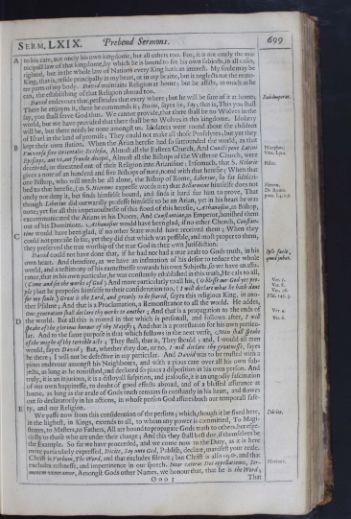 Serm. LXIX.
Prebend Sermons.
699
to his care, not onely his own kingdome, but all others too. For, it is not onely the mu-
Serm. LXIX.
Prebend Sermons.
699
to his care, not onely his own kingdome, but all others too. For, it is not onely the mu-nicipall law of that kingdome, by which he is bound to see his own subjects, in all cases,
righted, but in the whole law of Nations every King hath an interest. My soule may be
King, that is, reside principally in my heart, or in my braine, but it neglects not the remo-
ter parts of my body. David maintains Religion at home; but he assists, as much as he
can, the establishing of that Religion abroad too.
David endevours that, perswades that every where; but he will be sure of it at home; Suis imperat.
There he enjoyns it, there he commands it; Dicite, sayes he, Say; that is, This you shall
say, you shall serve God thus. We cannot provide, that there shall be no Wolves in the
world, but we have provided that there shall be no Wolves in this kingdome. Idolatry
will be, but there needs be none amongst us. Idolaters were round about the children
of Israel in the land of promise; They could not make all those Proselytes; but yet they
kept their own station. When the Arian heresie had so surrounded the world, as that
Vniversa fere Orientalis Ecclesia, Almost all the Eastern Church, Nicephor.
Vinc. Lyra. And Cuncti pene Latini
Episcopi, aut vi, aut fraude decepti, Almost all the Bishops of the Westerne Church, were
deceived, or threatned out of their Religion into Arianisme; Insomuch, Hilar. that S. Hilarie
gives a note of an hundred and five Bishops of note, noted with that heresie; When that
one Bishop, who will needs be all alone, the Bishop of Rome, Liberius, so far subscri-
bed to that heresie, Hieron. (as S. Hieroms expresse words are) that Bellarmine himselfe does not
onely not deny it, but finds himselfe bound, and finds it hard for him to prove, That De Roma.
pont. l. 4. c. 9.
though Liberius did outwardly professe himselfe to be an Arian, yet in his heart he was
none; yet for all this impetuousnesse of this flood of this heresie, Athanasius, as Bishop,
excommunicated the Arians in his Dioces, And Constantine, as Emperor, banished them
out of his Dominions. Athanasius would have been glad, if no other Church, Constan-
tine would have been glad, if no other State would have received them; When they
could not prevaile so far, yet they did that which was possible, and most proper to them,
they preserved the true worship of the true God in their own Jurisdiction.
David could not have done that, if he had not had a true zeale to Gods truth, Ipse facit,
quod jubet. in his
own heart. And therefore, as we have an intimation of his desire to reduce the whole
world, and a testimony of his earnestnesse towards his own Subjects, so we have an assu-
rance, that in his own particular, he was constantly established in this truth, He cals to all,
(Come and see the works of God) And more particularly to all his, Ver. 5. (O blesse our God yee peo-
ple) but he proposes himselfe to their consideration too, Ver. 8. (I will declare what he hath done
for my soule.) Great is the Lord, and greatly to be feared, sayes this religious King, in Ver. 16. ano-
ther Psalme; And that is a Proclamation, a Remonstrance to all the world. He addes, Psal. 145.3.
One generation shall declare thy works to another;Ver. 4. And that is a propagation to the ends of
the world. But all this is rooted in that which is personall, and follows after, Ver. 6.I will
speake of the glorious honour of thy Majesty; And that is a protestation for his own particu-
lar. And to the same purpose is that which follows in the next verse, Men shall speake
of the might of thy terrible acts; They shall, that is, They should; and, I would all men
would, sayes David; But, whether they doe, or no, I will declare thy greatnesse, sayes
he there; I will not be defective in my particular. And David was to be trusted with a
pious endevour amongst his Neighbours, and with a pious care over all his own sub-
jects, as long as he nourished, and declared so pious a disposition in his own person. And
truly, it is an injurious, it is a disloyall suspition, and jealousie, it is an ungodly fascination
of our own happinesse, to doubt of good effects abroad, and of a blessed assurance at
home, as long as the zeale of Gods truth remains so constantly in his heart, and flowes
out so declaratorily in his actions, in whose person God assures both our temporall safe-
ty, and our Religion.
We passe now from this consideration of the persons; which, though it be fixed here, Dicite.
in the highest, in Kings, extends to all, to whom any power is committed, To Magi-
strates, to Masters, to Fathers, All are bound to propagate Gods truth to others, but espe-
cially to those who are under their charge; And this they shall best doe, if themselves be
the Example. So far we have proceeded, and we come now to the Duty, as it is here
more particularly expressed, Dicite, Say unto God, Publish, declare, manifest your zeale.
Christ is Verbum, The Word, and that excludes silence; but Christ is also λόγος, and that
excludes rashnesse, and impertinence in our speech. Inter cæteras Dei appellationes, Nazianz. Ser-
monem veneramur, Amongst Gods other Names, we honour that, that he is the Word; Ooo3 That
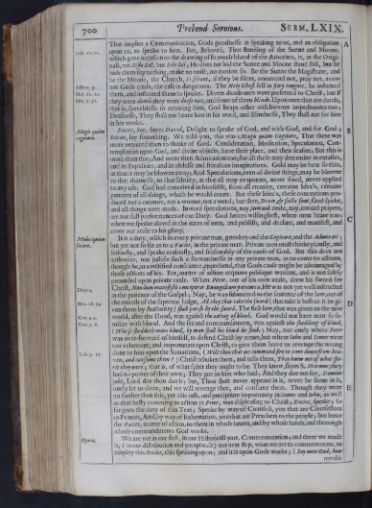 700
Prebend Sermons.
Serm. LXIX.
That implies a Communication, Gods goodnesse in speaking to us, and an obligation
700
Prebend Sermons.
Serm. LXIX.
That implies a Communication, Gods goodnesse in speaking to us, and an obligation
upon us, Josh. 10.12. to speake to him. For, Beloved, That standing of the Sunne and Moone,
which gave occasion to the drawing of so much blood of the Amorites, is, in the Origi-
nall, not Siste Sol, but Sile Sol; He does not bid the Sunne and Moone stand still, but he
bids them say nothing, make no noise, no motion so. Be the Sunne the Magistrate, and
be the Moone, the Church, Si sileant, if they be silent, command not, pray not, avow
not Gods cause, Acts 2.3. the case is dangerous. The Holy Ghost fell in fiery tongues, he inflamed
them, and inflamed them to speake. Divers dumb men were presented to Christ; but if Mat. 12.22.
they were dumb, they were deafe too, and some of them blinde. Upon men that are dumb, Mar. 7.32.
that is, speechlesse in avowing him, God heaps other mischievous impediments too;
Deafnesse, They shall not heare him in his word, and Blindnesse, They shall not see him
in his works.
Dicite, Magis quàm
cogitare. Say, sayes David, Delight to speake of God, and with God, and for God;
Dicite, say something. We told you, this was Magis quàm Cogitare, That there was
more required then to thinke of God. Consideration, Meditation, Speculation, Con-
templation upon God, and divine objects, have their place, and their season; But this is
more then that; And more then Admiration too, for all these may determine in extasies,
and in stupidities, and in uselesse and frivolous imaginations. Gold may be beat so thin,
as that it may be blowne away; And Speculations, even of divine things, may be blowne
to that thinnesse, to that subtilty, as that all may evaporate, never fixed, never applied
to any use. God had conceived in himselfe, from all eternity, certaine Idea's, certaine
patterns of all things, which he would create. But these Idea's, these conceptions pro-
duced not a creature, not a worme, not a weed; but then, Dixit, & facta sunt, God spoke,
and all things were made. Inward speculations, nay, inward zeale, nay, inward prayers,
are not full performances of our Duty. God heares willingliest, when men heare too;
when we speake alowd in the eares of men, and publish, and declare, and manifest, and
avow our zeale to his glory.
It is a duty, Minùs quàm
facere. which in every private man, goes beyond the Cogitare, and the Admirari;
but yet not so far as to a Facite, in the private man. Private men must thinke piously, and
seriously, and speake zealously, and seasonably of the cause of God. But this does not
authorize, nor justifie such a forwardnesse in any private man, as to come to actions,
though he, in a rectified conscience, apprehend, that Gods cause might be advantaged by
those actions of his. For, matter of action requires publique warrant, and is not safely
grounded upon private zeale. When Peter, out of his own zeale, drew his sword for
Christ, Origen. Nondum manifestè conceperat Euangelium patientiæ, He was not yet well instructed
in the patience of the Gospel; Nay, he was submitted to the sentence of the law, out of
the mouth of the supreme Judge, Mat. 26.54. All they that take the sword (that take it before it be gi-
ven them by Authority) shall perish by the sword. The first law, that was given to the new
world, Gen. 9.4. after the Flood, was against the eating of blood. God would not have man so fa-
miliar with blood. And the second commandement, was against the shedding of blood, Gen. 9.6.
(Who so sheddeth mans blood, by man shall his blood be shed.) Nay, not onely where Peter
was over-forward of himself, to defend Christ by armes, but where Iohn and Iames were
too vehement, and importunate upon Christ, to give them leave to revenge the wrong
done to him upon the Samaritans, Luk. 9.55. (Wilt thou that we command fire to come down from hea-
ven, and consume them?) Christ rebukes them, and tells them, They knew not of what spi-
rit they were; that is, of what spirit they ought to be. They knew, sayes S. Hierome, they
had no power of their own; They goe to him who had; And they doe not say, Domine
jube, Lord doe thou doe it; but, Thou shalt never appeare in it, never be seene in it,
onely let us alone, and we will revenge thee, and consume them. Though they went
no farther then this, yet this rash, and precipitate importunity in Iames and Iohn, as well
as that hasty comming to action in Peter, was displeasing to Christ; Dicite, speake; so
far goes the duty of this Text; Speake by way of Counsell, you that are Counsellors
to Princes, And, by way of Exhortation, you that are Preachers to the people; but leave
the Facite, matter of action, to them in whose hearts, and by whose hands, and thorough
whose commandments God works.
We are yet in our first, Opera. in our Historicall part, Commemoration, and there we made
it, (in our distribution and paraphrase) our next step, what we are to commemorate, to
employ this Dicite, this speaking upon; and it is upon Gods works; (Say unto God, how terrible
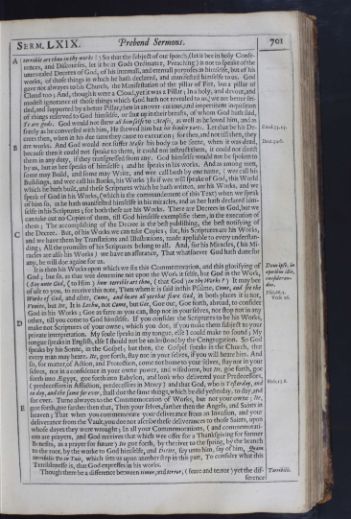 Serm. LXIX.
Prebend Sermons.
701
terrible art thou in thy works!) So that the subject of our speech, (let it bee in holy Confe-
Serm. LXIX.
Prebend Sermons.
701
terrible art thou in thy works!) So that the subject of our speech, (let it bee in holy Confe-rences, and Discourses, let it be in Gods Ordinance, Preaching) is not to speake of the
unrevealed Decrees of God, of his internall, and eternall purposes in himselfe, but of his
works, of those things in which he hath declared, and manifested himselfe to us. God
gave not alwayes to his Church, the Manifestation of the pillar of Fire, but a pillar of
Cloud too; And, though it were a Cloud, yet it was a Pillar; In a holy, and devout, and
modest ignorance of those things which God hath not revealed to us, we are better set-
tled, and supported by a better Pillar, then in an over-curious, and impertinent inquisition
of things reserved to God himselfe, or shut up in their breasts, of whom God hath said,
Ye are gods. God would not shew all himselfe to Moses, as well as he loved him, and as
freely as he conversed with him, He shewed him but his hinder parts.Exod. 33.23. Let that be his De-
crees then, when in his due time they came to execution; for then, and not till then, they
are works. And God would not suffer Moses his body to be seene, when it was dead, Deut. 34.6.
because then it could not speake to them, it could not instruct them, it could not direct
them in any duty, if they transgressed from any. God himselfe would not be spoken to
by us, but as hee speaks of himselfe; and he speaks in his works. And as among men,
some may Build, and some may Write, and wee call both by one name, (wee call his
Buildings, and wee call his Books, his Works) so if wee will speake of God, this World
which he hath built, and these Scriptures which he hath written, are his Works, and we
speak of God in his Works, (which is the commandement of this Text) when we speak
of him so, as he hath manifested himselfe in his miracles, and as hee hath declared him-
selfe in his Scriptures; for both these are his Works. There are Decrees in God, but we
can take out no Copies of them, till God himselfe exemplifie them, in the execution of
them; The accomplishing of the Decree is the best publishing, the best notifying of
the Decree. But, of his Works we can take Copies; for, his Scriptures are his Works,
and we have them by Translations and Illustrations, made appliable to every understan-
ding; All the promises of his Scriptures belong to all. And, for his Miracles, (his Mi-
racles are also his Works) we have an assurance, That whatsoever God hath done for
any, he will doe againe for us.
It is then his Works upon which we fix this Commemoration, Deus ipse, in
operibus illis,
consideran-
dus. and this glorifying of
God; but so, as that wee determine not upon the Work it selfe, but God in the Work,
(Say unto God, (to Him) how terrible art thou, (that God) in thy Works?) It may bee
of use to you, to receive this note, Then when it is said in this Psalme, Come, and see the
Works of God, and after, Come, and heare all yee that feare God, Psal. 66.5. in both places it is not,
Verse 16. Venite, but Ite, It is Lechu, not Come, but Goe, Goe out, Goe forth, abroad, to consider
God in his Works; Goe as farre as you can, stop not in your selves, nor stop not in any
other, till you come to God himselfe. If you consider the Scriptures to be his Works,
make not Scriptures of your owne; which you doe, if you make them subject to your
private interpretation. My soule speaks in my tongue, else I could make no sound; My
tongue speaks in English, else I should not be understood by the Congregation. So God
speaks by his Sonne, in the Gospel; but then, the Gospel speaks in the Church, that
every man may heare. Ite, goe forth, stay not in your selves, if you will heare him. And
so, for matter of Action, and Protection, come not home to your selves, stay not in your
selves, not in a confidence in your owne power, and wisedome, but Ite, goe forth, goe
forth into Ægypt, goe forth into Babylon, and look who delivered your Predecessors,
(predecessors in Affliction, predecessors in Mercy) and that God, who is Yesterday, Heb. 13.8. and
to day, and the same for ever, shall doe the same things, which he did yesterday, to day, and
for ever. Turne alwayes to the Commemoration of Works, but not your owne; Ite,
goe forth, goe farther then that, Then your selves, farther then the Angels, and Saints in
heaven; That when you commemorate your deliverance from an Invasion, and your
deliverance from the Vault, you doe not ascribe these deliverances to those Saints, upon
whose dayes they were wrought; In all your Commemorations, (and commemorati-
ons are prayers, and God receives that which wee offer for a Thanksgiving for former
Benefits, as a prayer for future) Ite goe forth, by the river to the spring, by the branch
to the root, by the worke to God himselfe, and Dicite, say unto him, say of him, Quam
terribilis Tu in Tuis, which sets us upon another step in this part, To consider what this
Terriblenesse is, that God expresses in his works.
Though there be a difference between timor, and terror, Terribilis. (feare and terror) yet the dif-
ference
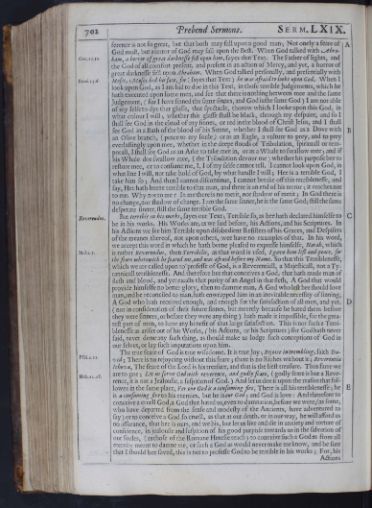 702
Prebend Sermons.
Serm. LXIX.
ference is not so great, but that both may fall upon a good man; Not onely a feare of
702
Prebend Sermons.
Serm. LXIX.
ference is not so great, but that both may fall upon a good man; Not onely a feare of
God must, but a terror of God may fall upon the Best. When God talked with Abra-
ham, a horror of great darknesse fell upon him, Gen. 15.12. sayes that Text. The Father of lights, and
the God of all comfort present, and present in an action of Mercy, and yet, a horror of
great darknesse fell upon Abraham. When God talked personally, and presentially with
Moses,Exod. 13.6. Moses hid his face, for (sayes that Text) he was afraid to looke upon God. When I
look upon God, as I am bid to doe in this Text, in those terrible Judgements, which he
hath executed upon some men, and see that there is nothing between mee and the same
Judgement, (for I have sinned the same sinnes, and God is the same God) I am not able
of my selfe to dye that glasse, that spectacle, thorow which I looke upon this God, in
what colour I will; whether this glasse shall be black, through my despaire, and so I
shall see God in the cloud of my sinnes, or red in the blood of Christ Jesus, and I shall
see God in a Bath of the blood of his Sonne, whether I shall see God as a Dove with
an Olive branch, (peace to my soule) or as an Eagle, a vulture to prey, and to prey
everlastingly upon mee, whether in the deepe floods of Tribulation, spirituall or tem-
porall, I shall see God as an Arke to take mee in, or as a Whale to swallow mee; and if
his Whale doe swallow mee, (the Tribulation devour me) whether his purpose bee to
restore mee, or to consume me, I, I of my selfe cannot tell. I cannot look upon God, in
what line I will, nor take hold of God, by what handle I will; Hee is a terrible God, I
take him so; And then I cannot discontinue, I cannot breake off this terriblenesse, and
say, Hee hath beene terrible to that man, and there is an end of his terror; it reaches not
to me. Why not to me? In me there is no merit, nor shadow of merit; In God there is
no change, nor shadow of change. I am the same sinner, he is the same God; still the same
desperate sinner, still the same terrible God.
But terrible in his works, Reverendus. sayes our Text; Terrible so, as hee hath declared himselfe to
be in his works. His Works are, as we said before, his Actions, and his Scriptures. In
his Actions we see him Terrible upon disobedient Resisters of his Graces, and Despisers
of the meanes thereof, not upon others, wee have no examples of that. In his word,
we accept this word in which he hath beene pleased to expresse himselfe, Norah, which
is rather Reverendus, Mal. 2.5. then Terribilis, as that word is used, I gave him life and peace, for
the feare wherewith he feared me, and was afraid before my Name. So that this Terriblenesse,
which we are called upon to professe of God, is a Reverentiall, a Majesticall, not a Ty-
rannicall terriblenesse. And therefore hee that conceives a God, that hath made man of
flesh and blood, and yet exacts that purity of an Angel in that flesh, A God that would
provide himselfe no better glory, then to damme man, A God who lest hee should love
man, and be reconciled to man, hath enwrapped him in an inevitable necessity of sinning,
A God who hath received enough, and enough for the satisfaction of all men, and yet,
(not in consideration of their future sinnes, but meerely because he hated them before
they were sinners, or before they were any thing) hath made it impossible, for the grea-
test part of men, to have any benefit of that large satisfaction. This is not such a Terri-
blenesse as arises out of his Works, (his Actions, or his Scriptures) for God hath never
said, never done any such thing, as should make us lodge such conceptions of God in
our selves, or lay such imputations upon him.
The true feare of God is true wisedome. It is true Joy; Rejoice in trembling, saith Da-
vid;Psal. 2.11. There is no rejoycing without this feare; there is no Riches without it; Reverentia
Iehovæ, The feare of the Lord is his treasure, and that is the best treasure. Thus farre we
are to goe;Heb. 12.28. Let us serve God with reverence, and godly feare, (godly feare is but a Reve-
rence, it is not a Jealousie, a suspition of God.) And let us doe it upon the reason that fol-
lowes in the same place, For our God is a consuming fire, There is all his terriblenesse; he
is a consuming fire to his enemies, but he is our God; and God is love: And therefore to
conceive a cruell God, a God that hated us, even to damnation, before we were, (as some,
who have departed from the sense and modesty of the Ancients, have adventured to
say) or to conceive a God so cruell, as that at our death, or in our way, he will afford us
no assurance, that hee is ours, and we his, but let us live and die in anxiety and torture of
conscience, in jealousie and suspition of his good purpose towards us in the salvation of
our soules, (as those of the Romane Heresie teach) to conceive such a God as from all
eternity meant to damne me, or such a God as would never make me know, and be sure
that I should bee saved, this is not to professe God to be terrible in his works; For, his Actions
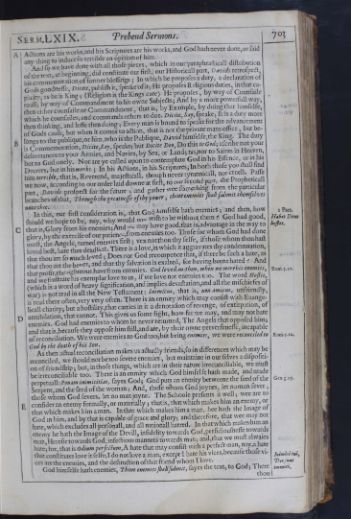 Serm. LXIX.
Prebend Sermons.
703
Actions are his works, and his Scriptures are his works, and God hath never done, or said
Serm. LXIX.
Prebend Sermons.
703
Actions are his works, and his Scriptures are his works, and God hath never done, or said
any thing to induce so terrible an opinion of him.
And so we have done with all those pieces, which in our paraphrasticall distribution
of the text, at beginning, did constitute our first, our Historicall part, Davids retrospect,
his commemoration of former blessings; In which he proposes a duty, a declaration of
Gods goodnesse, Dicite, publish it, speake of it; He proposes Religious duties, in that ca-
pacity, as he is King; (Religion is the Kings care) He proposes, by way of Counsaile
to all; by way of Commandment to his owne Subjects; And by a more powerfull way,
then either counsaile or Commandment, that is, by Example, by doing that himselfe,
which he counsailes, and commands others to doe. Dicite, Say, speake; It is a duty more
then thinking, and lesse then doing; Every man is bound to speake for the advancement
of Gods cause, but when it comes to action, that is not the private mans office, but be-
longs to the publique, or him, who is the Publique, David himselfe, the King. The duty
is Commemoration, Dicite, Say, speake; but Dicite Deo, Do this to God; ascribe not your
deliverances to your Armies, and Navies, by Sea, or Land; no, nor to Saints in Heaven,
but to God onely. Nor are ye called upon to contemplate God in his Essence, or in his
Decrees, but in his works; In his Actions, in his Scriptures; In both those you shall find
him terrible, that is, Reverend, majesticall, though never tyrannicall, nor cruell. Passe
we now, according to our order laid downe at first, to our second part, the Propheticall
part, Davids prospect for the future; and gather wee something from the particular
branches of that, Through the greatnesse of thy power, thine enemies shall submit themselves
unto thee.
In this, our first consideration is, that God himselfe hath enemies; and then, 2 Part. how
should we hope to be, nay, why would wee wish to be without them? God had good, Habet Deus
hostes.
that is, Glory from his enemies; And we may have good, that is, advantage in the way to
glory, by the exercise of our patience, from enemies too. Those for whom God had done
most, the Angels, turned enemies first; vex not thou thy selfe, if those whom thou hast
loved best, hate thee deadliest. There is a love, in which it aggravates thy condemnation,
that thou art so much loved; Does not God recompence that, if there be such a hate, as
that thou art the better, and that thy salvation is exalted, for having beene hated? And
that profit, the righteous have from enemies. God loved us then, when we were his enemies, Rom. 5.10.
and we frustrate his exemplar love to us, if we love not enemies too. The word Hostis,
(which is a word of heavy signification, and implies devastation, and all the mischiefes of
war) is not read in all the New Testament: Inimicus, that is, non amicus, unfriendly,
is read there often, very very often. There is an enmity which may consist with Euange-
licall charity; but a hostility, that carries in it a denotation of revenge, of extirpation, of
annihilation, that cannot. This gives us some light, how far we may, and may not hate
enemies. God had enemies to whom he never returned, The Angels that opposed him;
and that is, because they oppose him still, and are, by their owne perversenesse, incapable
of reconciliation. We were enemies to God too; but being enemies, Rom. 5.10. we were reconciled to
God by the death of his Son.
As then actual reconciliation makes us actually friends, so in differences which may be
reconciled, we should not be too severe enemies, but maintaine in our selves a dispositi-
on of friendship; but, in those things, which are in their nature irreconciliable, we must
be irreconciliable too. There is an enmity which God himselfe hath made, and made
perpetuall: Ponam inimicitias, sayes God;Gen. 3.15. God puts an enmity betweene the seed of the
Serpent, and the seed of the woman; And, those whom God joynes, let no man sever,
those whom God severs, let no man joyne. The Schoole presents it well; wee are to
consider an enemy formally, or materially; that is, that which makes him an enemy, or
that which makes him a man. In that which makes him a man, hee hath the Image of
God in him, and by that is capable of grace and glory; and therefore, that wee may not
hate, which excludes all personall, and all nationall hatred. In that which makes him an
enemy he hath the Image of the Devill, infidelity towards God, perfidiousnesse towards
man, Heresie towards God, infectious manners towards man; and, that we must alwaies
hate; for, that is Odium perfectum, A hate that may consist with a perfect man, nay, a hate
that constitutes love it selfe, I do not love a man, except I hate his vices, because those Inimici tui,
Dei sunt
inimici. vi-
ces are the enemies, and the destruction of that friend whom I love.
God himselfe hath enemies, Thine enemies shall submit, sayes the text, to God; There thou
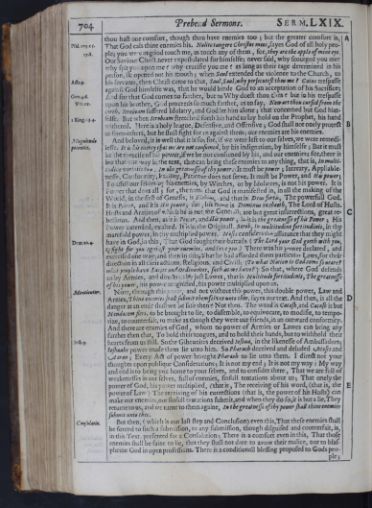 704
Prebend Sermons.
Serm. LXIX.
thou hast one comfort, though thou have enemies too; but the greater comfort is,
704
Prebend Sermons.
Serm. LXIX.
thou hast one comfort, though thou have enemies too; but the greater comfort is,
That God cals thine enemies his.Psal. 105.15. Nolite tangere Christos meos, sayes God of all holy peo-
ple; you were as good touch me, 17.8. as touch any of them, for, they are the apple of mine eye.
Our Saviour Christ never expostulated for himselfe; never said, why scourged you me?
why spit you upon me? why crucifie you me? as long as their rage determined in his
person, he opened not his mouth; when Saul extended the violence to the Church, to
his servants, Acts 9. then Christ came to that, Saul, Saul, why persecutest thou me? Cains trespasse
against God himselfe was, that he would binde God to an acceptation of his Sacrifice;
And for that God comes no farther, Gen. 4.6. but to Why doest thou thus? but in his trespasse
upon his brother, God proceeds so much farther, as to say, Ver. 11. Now art thou cursed from the
earth. Ieroboam suffered Idolatry, and God let him alone; that concerned but God him-
selfe. But when Ieroboam stretched forth his hand to lay hold on the Prophet, 1 King. 13.4. his hand
withered. Here is a holy league, Defensive, and Offensive; God shall not onely protect
us from others, but he shall fight for us against them; our enemies are his enemies.
And beloved, Magnitude
potentiæ. it is well that it is so; for, if we were left to our selves, we were remedi-
lesse. It is his mercy that we are not consumed, by his indignation, by himselfe; But it must
be the exercise of his power, if we be not consumed by his, and our enemies; for, there is
but that one way in the text, that can bring these enemies to any thing, that is, In multi-
tudine virtutis tuæ, In the greatnesse of thy power. It must be power; Intreaty, Appliable-
nesse, Conformity, Facility, Patience does not serve. It must be Power, and His power;
To assist our selves by his enemies, by Witches, or by Idolaters, is not his power. It is
Power that does all; for, the name that God is manifested in, in all the making of the
World, in the first of Genesis, is Elohim, and that is Deus fortis, The powerfull God.
It is Power, and it is His power; for, his name is Dominus tzebaoth, The Lord of Hosts.
Hosts and Armies of which he is not the Generall, are but great insurrections, great re-
bellions. And then, as it is Power, and His power, so it is the greatnesse of his Power; His
Power extended, exalted. It is in the Originall, Berob, In multitudine fortitudinis, in thy
manifold power, in thy multiplied power. Moses considers the assurance that they might
have in God, Deut. 20.4. in this, That God fought their battails (The Lord your God goeth with you,
to fight for you against your enemies, and save you) There was his power declared, and
exercised one way; and then in this, That he had afforded them particular Laws, for their
direction in all their actions, Religious, and Civill; (To what Nation is God come so neare?
what people have Lawes and Ordinances, such as we have?) So that, where God defends
us by Armies, and directs us by just Lawes, that is Multitudo fortitudinis, The greatnesse
of his power, his power magnified, his power multiplied upon us.
Now, Mentientur. through this power, and not without this power, this double power, Law and
Armes, Thine enemies shall submit themselves unto thee, sayes our text. And then, is all the
danger at an end? shall we be safe then? Not then. The word is Cacash, and Cacash is but
Mendacem fieri, to be brought to lie, to dissemble, to equivocate, to modifie, to tempo-
rize, to counterfait, to make as though they were our friends, in an outward conformity.
And there are enemies of God, whom no power of Armies or Lawes can bring any
farther then that, To hold their tongues, and to hold their hands, but to withhold their
hearts from us still.Iosh. 9. So the Gibeonites deceived Ioshua, in the likenesse of Ambassadors;
Ioshuahs power made them lie unto him. So Pharaoh deceived and deluded Moses and
Aaron; Every Act of power brought Pharaoh to lie unto them. I direct not your
thoughts upon publique Considerations; It is not my end; It is not my way: My way
and end is to bring you home to your selves, and to consider there, That we are full of
weaknesses in our selves, full of enemies, sinfull tentations about us; That onely the
power of God, his power multiplied, (that is, The receiving of his word, (that is, the
power of Law) The receiving of his corrections (that is, the power of his Hosts) can
make our enemies, our sinfull tentations submit, and when they do so, it is but a lie, They
returne to us, and we turne to them againe, In the greatnesse of thy power shall thine enemies
submit unto thee.
But then, Consolatio. (which is our last step and Conclusion) even this, That these enemies shall
be forced to such a submission, to any submission, though disguised and counterfait, is,
in this Text, presented for a Consolation; There is a comfort even in this, That those
enemies shall be faine to lie, that they shall not dare to avow their malice, nor to blas-
pheme God in open professions. There is a conditionall blessing proposed to Gods peo-
ple;
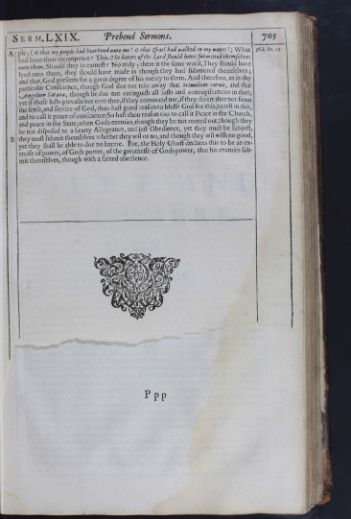 Serm. LXIX.
Prebend Sermons.
705
ple; (O that my people had hearkned unto me! O that Israel had walked in my wayes!)Psal. 80.15. What
Serm. LXIX.
Prebend Sermons.
705
ple; (O that my people had hearkned unto me! O that Israel had walked in my wayes!)Psal. 80.15. What
had been their recompence? This. The haters of the Lord should have submitted themselves
unto them. Should they in earnest? No truly; there is the same word, They should have
lyed unto them, they should have made as though they had submitted themselves;
and that, God presents for a great degree of his mercy to them. And therefore, as in thy
particular Conscience, though God doe not take away that Stimulum carnis, and that
Angelum Satanæ, though he doe not extinguish all lusts and concupiscencies in thee,
yet if those lusts prevaile not over thee, if they command not, if they divert thee not from
the sense, and service of God, thou hast good reason to blesse God for this, to rest in this,
and to call it peace of conscience: So hast thou reason too to call it Peace in the Church,
and peace in the State, when Gods enemies, though they be not rooted out, though they
be not disposed to a hearty Allegeance, and just Obedience, yet they must be subject,
they must submit themselves whether they wil or no, and though they wil wish no good,
yet they shall be able to doe no harme. For, the Holy Ghost declares this to be an ex-
ercise of power, of Gods power, of the greatnesse of Gods power, that his enemies sub-
mit themselves, though with a fained obedience.
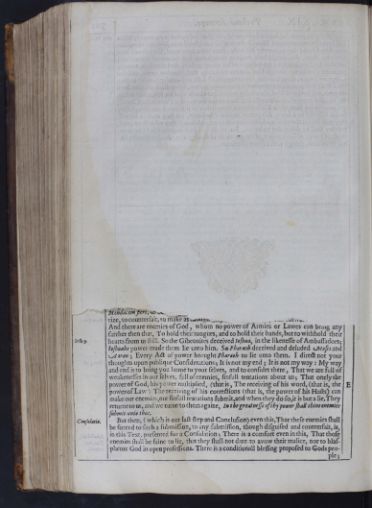
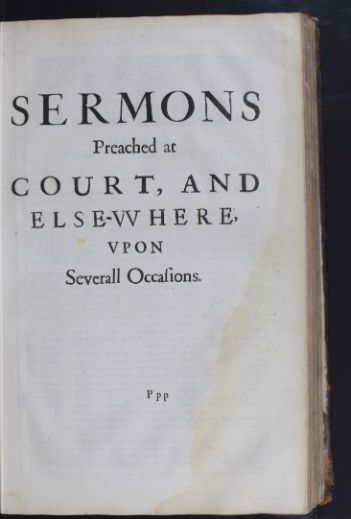
Sermons
Preached at
Court, and
Else-VVWhere,
Vpon
Severall Occasions. Ppp
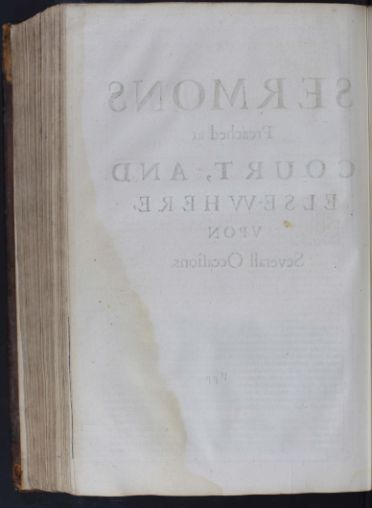
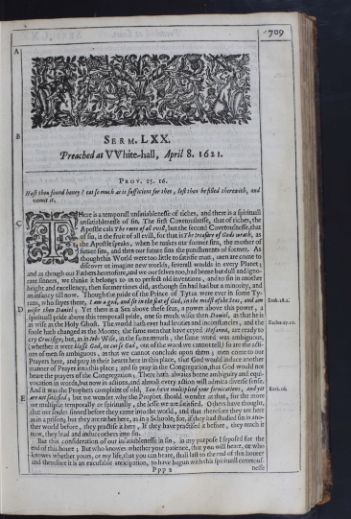
Serm. LXX.
Preached at VVWhite-hall, April 8. 1621.
Prov. 25.16.
Hast thou found honey? eat so much as is sufficient for thee, lest thou be filled therewith, and
vomit it. THereThere is a temporall unsatiablenesse of riches, and there is a spirituall
unsatiablenesse of sin. The first Covetousnesse, that of riches, the
Apostle cals The roote of all evill, but the second Covetousnesse, that
of sin, is the fruit of all evill, for that is The treasure of Gods wrath, as
the Apostle speaks, when he makes our former sins, the mother of
future sins, and then our future sins the punishments of former. As
though this World were too little to satisfie man, men are come to
discover or imagine new worlds, severall worlds in every Planet;
and as though our Fathers heretofore, and we our selves too, had beene but dull and igno-
rant sinners, we thinke it belongs to us to perfect old inventions, and to sin in another
height and excellency, then former times did, as though sin had had but a minority, and
an infancy till now. Though the pride of the Prince of Tyrus were ever in some Ty-
rans, who sayes there, I am a god, and sit in the seat of God, in the midst of the Seas,Ezek. 28.2. and am
wiser then Daniel; Yet there is a Sea above these seas, a power above this power, a
spirituall pride above this temporall pride, one so much wiser then Daniel, as that he is
as wise as the Holy Ghost. The world hath ever had levities and inconstancies, Ecclus. 27.11. and the
foole hath changed as the Moone; the same men that have cryed Hosanna, are ready to
cry Crucifige; but, as in Iobs Wife, in the same mouth, the same word was ambiguous,
(whether it were blesse God, or curse God, out of the word we cannot tell) so are the acti-
ons of men so ambiguous, as that we cannot conclude upon them; men come to our
Prayers here, and pray in their hearts here in this place, that God would induce another
manner of Prayer into this place; and so pray in the Congregation, that God would not
heare the prayers of the Congregation; There hath alwaies beene ambiguity and equi-
vocation in words, but now in actions, and almost every action will admit a diverse sense.
And it was the Prophets complaint of old, You have multiplied your fornications,Ezek. 16. and yet
are not satisfied; but we wonder why the Prophet should wonder at that, for the more
we multiplie temporally or spiritually, the lesse we are satisfied. Others have thought,
that our soules sinned before they came into the world, and that therefore they are here
as in a prison; but they are rather here, as in a Schoole; for, if they had studied sin in ano-
ther world before, they practise it here, If they have practised it before, they teach it
now, they lead and induce others into sin. But this consideration of our insatiablenesse in sin, in my purpose I seposed for the
end of this houre; But who knowes whether your patience, that you will heare, or who
knowes whether yours, or my life, that you can heare, shall last to the end of this houre?
and therefore it is an excusable anticipation, to have begun with this spirituall covetous-
Ppp2 nesse
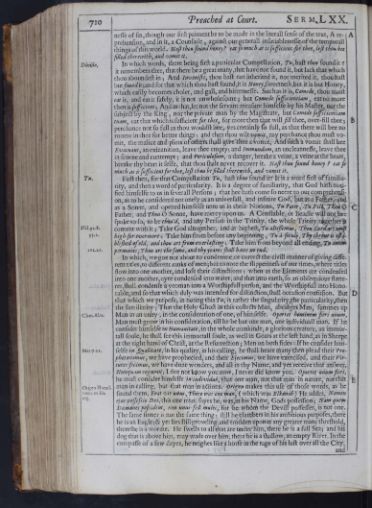 710
Preached at Court.
Serm. LXX.
nesse of sin, though our first paiment be to be made in the literall sense of the text, A re-
710
Preached at Court.
Serm. LXX.
nesse of sin, though our first paiment be to be made in the literall sense of the text, A re-prehension, and in it, a Counsaile, against our generall insatiablenesse of the temporall
things of this world. Hast thou found honey? eat so much as is sufficient for thee, lest thou bee
filled therewith, and vomit it. In which words, Divisio. there being first a particular Compellation, Tu, hast thou found it?
it remembers thee, that there be a great many, that have not found it, but lack that which
thou aboundest in; And Invenisti, thou hast not inherited it, nor merited it, thou hast
but found it; and for that which thou hast found, it is Honey, sweetness, but it is but Honey,
which easily becomes choler, and gall, and bitternesse. Such as it is, Comede, thou maist
eat it, and eat it safely, it is not unwholesome; but Comede sufficientiam, eat no more
then is sufficient; And in that, let not the servant measure himselfe by his Master, nor the
subject by the King, nor the private man by the Magistrate, but Comede sufficientiam
tuam, eat that which is sufficient for thee, for more then that will fill thee, over-fill thee;
perchance not so full as thou wouldst bee, yet certainly so full, as that there will bee no
roome in thee for better things; and then thou wilt vomit, nay perchance thou must vo-
mit, the malice and plots of others shall give thee a vomit, And such a vomit shall bee
Evacuans, an exinanition, leave thee empty; and Immundum, an uncleannesse, leave thee
in scorne and contempt; and Periculosum, a danger, breake a veine, a veine at the heart,
breake thy heart it selfe, that thou shalt never recover it. Hast thou found honey? eat so
much as is sufficient for thee, lest thou be filled therewith, and vomit it. First then, Tu. for that Compellation Tu, hast thou found it? It is a word first of familia-
rity, and then a word of particularity. It is a degree of familiarity, that God hath noti-
fied himselfe to us in severall Persons; that hee hath come so neere to our comprehensi-
on, as to be considered not onely as an universall, and infinite God, but as a Father, and
as a Sonne, and opened himselfe unto us in these Notions, Tu Pater, Tu Fili, Thou O
Father, and Thou O Sonne, have mercy upon us. A Constable, or Beadle will not bee
spoke to so, to be thou'd, and any Person in the Trinity, the whole Trinity together is
content with it;Psal. 92.8. Take God altogether, and at highest, Tu altissimus, Thou Lord art most
high for evermore;93.2. Take him from before any beginning, Tu à seculo, Thy throue is esta-
blished of old, and thou art from everlasting; Take him from beyond all ending, Tu autem
permanes, 102.27. Thou art the same, and thy yeares shall have no end. In which, we goe not about to condemne, or correct the civill manner of giving diffe-
rent titles, to different ranks of men; but to note the slipperiness of our times, where titles
flow into one another, and lose their distinctions; when as the Elements are condensed
into one another, ayre condensed into water, and that into earth, so an obsequious flatte-
rer, shall condense a yeoman into a Worshipfull person, and the Worshipfull into Hono-
rable, and so that which duly was intended for distinction, shall occasion confusion. But
that which we purpose, in noting this Tu, is rather the singularity, the particularity, then
the familiarity; That the Holy Ghost in this collects Man, abridges Man, summes up
Man in an unity, Clem Alex. in the consideration of one, of himselfe. Oportet hominem fieri unum,
Man must grow in his consideration, till he be but one man, one individuall man. If he
consider himselfe in Humanitate, in the whole mankinde, a glorious creature, an immor-
tall soule, he shall see this immortall soule, as well in Goats at the left hand, as in Sheepe
at the right hand of Christ, at the Resurrection; Men on both sides: If he consider him-
selfe in Qualitate, Mat. 7.22. in his quality, in his calling, he shall heare many then plead their Pro-
phetavimus, we have prophecied, and their Ejecimus, we have exercisedexorcised, and their Vir-
tutes secimus, we have done wonders, and all in thy Name, and yet receive that answer,
Nunquam cognovi, I doe not know you now, I never did know you. Oportet unum fieri,
he must consider himselfe in individuo, that one man, not that man in nature, not that
man in calling, Origen Homil.
unica in lib.
reg. but that man in actions. Origen makes this use of those words, as he
found them, Erat vir unus, There was one man; (which was Elkanah) He addes, Nomen
ejus possessio Dei, this one man, sayes he, was, in his Name, Gods possession; Nam quem
Dæmones possident, non unus sed multi, for he whom the Devill possesses, is not one.
The same sinner is not the same thing; still he clambers in his ambitious purposes, there
he is an Eagle; & yet lies still groveling, and trodden upon at any greater mans threshold,
there he is a worme. He swells to all that are under him, there he is a full Sea; and his
dog that is above him, may wade over him, there he is a shallow, an empty River. In the
compasse of a few dayes, he neighes like a horse in the rage of his lust over all the City, and
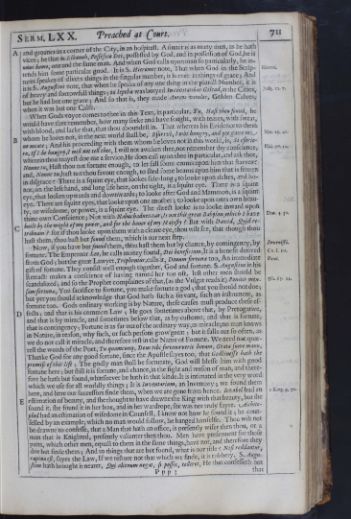 Serm. LXX.
Preached at Court.
711
and groanes in a corner of the City, in an hospitall. A sinner is as many men, as he hath
Serm. LXX.
Preached at Court.
711
and groanes in a corner of the City, in an hospitall. A sinner is as many men, as he hath
vices; he that is Elkanah, Possessio Dei, possessed by God, and in possession of God, he is
unus homo, one and the same man. And when God calls upon man so particularly, he in-
tends him some particular good. It is S. Hieromes note, Hieron. That when God in the Scrip-
tures speakes of divers things in the singular number, it is ever in things of grace; And
it is S. Augustins note, that when he speaks of any one thing in the plurall Number, it is
of heavy and sorrowfull things; as Ieptha was buryed In civitatibus Gilead,Judg. 12.7. in the Cities,
but he had but one grave; And so that is, they made Aureos vitulos, Golden Calves,
when it was but one Calfe.
When Gods voyce comes to thee in this Text, in particular, Tu, Hast thou found, he
would have thee remember, how many seeke and have sought, with teares, with sweat,
with blood, and lacke that, that thou aboundest in. That whereas his Evidence to them
whom he loves not, in the next world shall be, Esurivi, I was hungry,Mat. 25.42. and yee gave me
no meate; And his proceeding with them whom he loves not in this world, is, Si esurie-
ro, If I be hungry, I will not tell thee, I will not awaken thee, not remember thy conscience,
Psal. 50.12. wherein thou mayest doe me a service; He does call upon thee in particular, and ask thee,
Nonne tu, Hast thou not fortune enough, to let fall some crums upon him that starves?
and, Nonne tu, hast not thou favour enough, to shed some beams upon him that is frozen
in disgrace? There is a squint eye, that lookes side-long; to looke upon riches, and ho-
nor, on the left hand, and long life here, on the right, is a squint eye. There is a squint
eye, that lookes upwards and downwards; to looke after God and Mammon, is a squint
eye. There are squint eyes, that looke upon one another; to looke upon ones own beau-
ty, or wisedome, or power, is a squint eye. The direct looke is to looke inward upon
thine own Conscience; Not with Nabuchadnezzar, Is not this great Babylon,Dan. 4.30. which I have
built by the might of my power, and for the honor of my Majesty? But with David, Quid re-
tribuam? for if thou looke upon them with a cleare eye, thou wilt see, that though thou
hast them, thou hast but found them, which is our next step.
Now, if you have but found them, thou hast them but by chance, by contingency, Invenisti. by
fortune. Co. l. 10.
Pand. The Emperour Leo, he calls money found, Dei beneficium, It is a benefit derived
from God; but the great Lawyer, Triphonius, calls it, Donum fortunæ too, An immediate
gift of fortune. They consist well enough together, God and fortune. S. Augustine in his
Retract: makes a conscience of having named her too oft, lest other men should be
scandalized; and so the Prophet complaines of that, Esa. 65.11. (as the Vulgat reads it) Ponitis men-
sam fortunæ, You sacrifice to fortune, you make fortune a god; that you should not doe;
but yet you should acknowledge that God hath such a servant, such an instrument, as
fortune too. Gods ordinary working is by Nature, these causes must produce these ef-
fects; and that is his common Law; He goes sometimes above that, by Prerogative,
and that is by miracle, and sometimes below that, as by custome, and that is fortune,
that is contingency; Fortune is as far out of the ordinary way, as miracle; no man knows
in Nature, in reason, why such, or such persons grow great; but it falls out so often, as
we do not call it miracle, and therefore rest in the Name of Fortune. We need not quar-
rell the words of the Poet, Tu quamcunq;quamcunque Deus tibi fortunaverit horam, Grata sume manu,
Thanke God for any good fortune, since the Apostle sayes too, that Godlinesse hath the
promise of this life; The godly man shall be fortunate, God will blesse him with good
fortune here; but still it is fortune, and chance, in the sight and reason of man, and there-
fore he hath but found, whatsoever he hath in that kinde. It is intimated in the very word
which we use for all worldly things; It is Inventarium, an Inventory; we found them
here, and here our successors finde them, when we are gone from hence.2 King. 9.30. Iezabel had an
estimation of beauty, and she thought to have drawne the King with that beauty, but she
found it, she found it in her box, and in her wardrope, she was not truly fayre. Achito-
phel had an estimation of wisedome in Counsell, I know not how he found it; he coun-
selled by an example, which no man would follow, he hanged himselfe. Thou wilt not
be drawne to confesse, that a Man that hath an office, is presently wiser then thou, or a
man that is Knighted, presently valianter then thou. Men have preferment for those
parts, which other men, equall to them in the same things, have not, and therefore they
doe but finde them; And to things that are but found, what is our title? Nisi reddantur,
rapina est, sayes the Law, If we restore not that which we finde, it is robbery. S. Augu-
stine hath brought it nearer, Qui alienum negat, si posset, tolleret, He that confesseth not Ppp3 that
 712
Preached at Court.
Serm. LXX.
that which he hath found of another mans, if he durst, he would have taken it by force.
712
Preached at Court.
Serm. LXX.
that which he hath found of another mans, if he durst, he would have taken it by force.
For that which we have found in this world, our calling is the owner, our debts are the
owner, our children are the owner; our lusts, our superfluities are no owners: of all the
rest, God is the owner, and to this purpose, the poore is God.
S. Augustine puts a case to the point:Aug. Serm. 19.
de verb. Apost. He sayes when he was at Milan, a poore Usher
of a Grammar Schoole found a bag of money, 200 Solidorum; let it be but one hun-
dreth pounds; he set up bills; the owner came, offered him his tithe, ten pounds; he would
none; he pressed him to five, to three, to two; he would none: and then he that had lost
it, in an honorable indignation, disclaimed it all; Nihil perdidi, sayes he, it is all your
own, I lost nothing: Quale certamen! Theatrum mundus, spectator Deus, Out of importuni-
ty, he that found it, tooke it all, and out of conscience, that it was not his, gave it all to
the poore.
The things of this world we doe but finde, and of the things which we finde, we are
but Stewards for others. This finding is not so meerly casuall, as that it implies no man-
ner of seeking;Matzah Exu-
xit, vel ex-
pressit. We must put our selves into the way, into a calling. The word is Mat-
za, and that word is allowed us; but a word like it, is not allowed us; Matza is, but
Matzah is not; if there be an H added, an H, as it is an aspiration, a breathing, a pant-
ing after the things of this world, or an Ache, as it is a paine, that it make our bones ake,
or our hearts ake, or our conscience ake, it is a seeking, and a finding, not intended in this
word. Our prosecution and seeking must be moderate, our title and interest is but a
finding; and what hath the most fortunate found? Hony; it is true, but yet but Hony.
That which Solomon may justly seeme to intend, Mel. especially by Hony in this Text, is
that which the Poets, and other Masters of language, have called Magnas amicitias, and
Magnas Clientelas, dependance, and interest, and favour in great persons. It appeares
by the next verse, which depends upon this, and paraphrases it; Withdraw thy foot from
thy neighbours house. Where that which we reade, Withdraw, is in the Originall Hokar,
which is Fac pretiosum, make not thy selfe cheape, not vulgar, have some respect to thy
selfe, to thine own ingenuity, but principally to the other, to thy great friend: be not im-
portune and troublesome by any indiscreet assiduity, to them who are possessed with
businesse, though at sometimes they descend to thee; This is this Hony, where thou hast
accesse, yet doe not push open every doore, fling up every hanging, but use thy favour
modestly.
But in this Hony is wrapped up also all that is delightfull in this life; and Solomon car-
ries us often to that Comparison;Ver. 13. In the Chapter before this, for Wisedome; My Sonne,
eat thou Hony, because it is good; so shall the knowledge of wisedome be to thy soule; and in the
seaven and twentieth verse of this Chapter, 27. he uses it for Glory; It is not good to eat much
hony; so for men to search their own glory, is not glory. In the sixt Chapter of this booke,
when Solomon had sent us to the Ant,Prov. 6. to learne wisedome, betweene the eight verse and
the ninth, he sends us to another schoole, to the Bee: Vade ad Apem & disce quomodo
operationem venerabilem facit, Goe to the Bee, and learne how reverend and mysterious
a worke she works.Hieron. For, though S. Hierome acknowledge, that in his time, this verse
was not in the Hebrew Text, yet it hath ever been in many Copies of the Septuagint,
and though it be now left out in the Complutense Bible, and that which they call the
Kings, In Ezek. 3.3. yet it is in that still, which they value above all, the Vatican. S. Hierome him-
selfe takes it into his exposition, and other Fathers into theirs. So far therefore we may
hearken to that voyce, as to goe to the Bee, and learne to worke by that Creature.
Both S. Basil,Basil. Hom. 8.
in Hexa.
Chrysost. in
Psal. 110. and S. Chrysostome put this difference in that place, between the labour
of the Ant, and the Bee, That the Ants worke but for themselves, the Bee for others:
Though the Ants have a Common-wealth of their own, yet those Fathers call their la-
bour, but private labour; because no other Common-wealths have benefit by their la-
bour, but their own. Direct thy labours in thy calling to the good of the publique, and
then thou art a civill, a morall Ant; but consider also, That all that are of the houshold
of the faithfull, and professe the same truth of Religion, are part of this publique, and
direct thy labours, for the glory of Christ Jesus, amongst them too, and then thou art a
religious and a Christian Bee, and the fruit of thy labour shall be Hony. The labour of the
Ant is sub Dio, open, evident, manifest; The labour of the Bee is sub Tecto, in a house,
in a hive; They will doe good, and yet they will not be seene to doe it; they affect not
glory, nay, they avoyd it. For in experience, when some men curious of naturall know ledge,
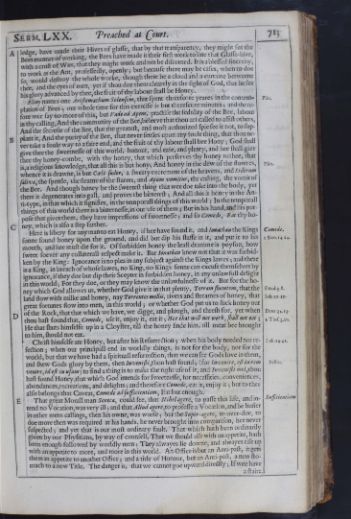 Serm. LXX.
Preached at Court.
713
ledge, have made their Hives of glasse, that by that transparency, they might see the
Serm. LXX.
Preached at Court.
713
ledge, have made their Hives of glasse, that by that transparency, they might see the
Bees manner of working, the Bees have made it their first work to line that Glasse-hive,
with a crust of Wax, that they might work and not be discerned. It is a blessed sincerity,
to work as the Ant, professedly, openly; but because there may be cases, when to doe
so, would destroy the whole worke, though there be a cloud and a curtaine betweene
thee, and the eyes of men, yet if thou doe them clearely in the sight of God, that he see
his glory advanced by thee, the fruit of thy labour shall be Honey.
Pliny names one Aristomachum Solensem,Plin. that spent threescore yeares in the contem-
plation of Bees; our whole time for this exercise is but threescore minutes; and there-
fore wee say no more of this, but Vade ad Apem, practife the sedulity of the Bee, labour
in thy calling, And the community of the Bee, beleeve that thou art called to assist others,
And the secresie of the Bee, that the greatest, and most authorized spie see it not, to sup-
plant it, And the purity of the Bee, that never settles upon any foule thing, that thou ne-
ver take a foule way to a faire end, and the fruit of thy labour shall bee Hony; God shall
give thee the sweetnesse of this world, honour, and ease, and plenty, and hee shall give
thee thy honey-combe, with thy honey, that which preserves thy honey to thee, that
is, a religious knowledge, that all this is but hony; And honey in the dew of the flowres,
Plin. whence it is drawne, is but Cœli sudor, a sweaty excrement of the heavens, and Siderum
saliva, the spettle, the fleame of the starres, and Apum vomitus, the casting, the vomit of
the Bee. And though honey be the sweetest thing that wee doe take into the body, yet
there it degenerates into gall, and proves the bitterest; And all this is honey in the An-
ti-type, in that which it signifies, in the temporall things of this world; In the temporall
things of this world there is a bitternesse, in our use of them; But in his hand, and his pur-
pose that gives them, they have impressions of sweetnesse; and so Comede, Eat thy ho-
ney, which is also a step farther.
Here is liberyliberty for any man to eat Honey, if hee have found it, Comede. and Ionathan the Kings
sonne found honey upon the ground, and did but dip his staffe in it, 1 Sam. 14. 24. and put it to his
mouth, and hee must die for it. Of forbidden honey the least dramme is poyson, how
sweet soever any collaterall respect make it. But Ionathan knew not that it was forbid-
kenforbid-
den by the King: Ignorance is no plea in any subject against the Kings lawes; and there
is a King, in breach of whose lawes, no King, no Kings sonne can excuse themselves by
ignorance, if they doe but dip their Scepter in forbidden honey, in any unlawfull delight
in this world; For they doe, or they may know the unlawfulnesse of it. But for the ho-
ney which God allowes us, whether God give it in that plenty, Terram fluentem,Exod. 3.8. that the
land flow with milke and honey, nay Torrentes mellis, rivers and streames of honey, Iob 20 17. that
great fortunes flow into men, in this world; or whether God put us to suck honey out
of the Rock, that that which we have, we digge, and plough, and thresh for, Deut. 32.13. yet when
thou hast found that, Comede, use it, enjoy it, eat it; Hee that will not work, shall not eat;
2 Thes. 3.10. He that shuts himselfe up in a Cloyster, till the honey finde him, till meat bee brought
to him, should not eat.
Christ himselfe are Honey, but after his Resurrection;Luk. 24.41. when his body needed not re-
fection; when our principall end in worldly things, is not for the body, nor for the
world, but that we have had a spirituall resurrection, that we can see Gods love in them,
and shew Gods glory by them, then Invenisti, thou hast found; (for Invenire, Festus. est in rem
venire, id est in usum) to find a thing is to make the right use of it, and Invenisti mel, thou
hast found Honey, that which God intends for sweetnesse, for necessities, conveniences,
abundances, recreations, and delights; and therefore Comede, eat it, enjoy it; but to thee
also belongs that Caveat, Comede ad sufficientiam, Eat but enough.
That great Morall man Seneca, could see, that Nihil agere, to passe this life, Sufficientiam and in-
tend no Vocation, was very ill; and that Aliud agere, to professe a Vocation, and be busier
in other mens callings, then his owne, was worse; but the Super-agere, to over-doe, to
doe more then was required at his hands, he never brought into comparison, hee never
suspected; and yet that is our most ordinary fault. That which hath been ordinarily
given by our Physitians, by way of counsell, That we should rise with an appetite, hath
been enough followed by worldly men; They alwayes lie downe, and alwayes rise up
with an appetite to more, and more in this world. An Office is but an Anti-past, it gets
them an appetite to another Office; and a title of Honour, but an Anti-past, a new sto-
mach to a new Title. The danger is, that we cannot goe upward directly; If wee have a staire,
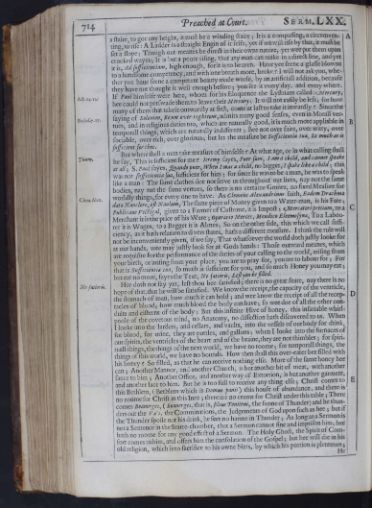 714
Preached at Court.
Serm. LXX.
a staire, to goe any height, it must be a winding staire; It is a compassing, a circumven-
714
Preached at Court.
Serm. LXX.
a staire, to goe any height, it must be a winding staire; It is a compassing, a circumven-ting, to rise: A Ladder is a straight Engin of it selfe, yet if we will rise by that, it must be
set a slope; Though our meanes be direct in their owne nature, yet wee put them upon
crooked wayes; It is but a poore rising, that any man can make in a direct line, and yet
it is, Ad sufficientiam, high enough, for it is to heaven. Have yee seene a glasse blowne
to a handsome competency, and with one breath more, broke? I will not ask you, whe-
ther you haue seene a competent beauty made worse, by an artificiall addition, because
they have not thought it well enough before; you see it every day, and every where.
If Paul himselfe were here, Act. 14.12. whom for his Eloquence the Lystrians called Mercury,
hee could not perswade them to leave their Mercury; It will not easily be left; for how
many of them that take it outwardly at first, come at last to take it inwardly? Since the
saying of Solomon, Eccles. 7.17. Be not over righteous, admits many good senses, even in Morall ver-
tues, and in religious duties too, which are naturally good, it is much more appliable in
temporall things, which are naturally indifferent; Bee not over faire, over witty, over
sociable, over rich, over glorious; but let the measure be Sufficientia tua, So much as is
sufficient for thee.
But where shall a man take measure of himselfe?Tuam. At what age, or in what calling shall
he say, This is sufficient for me? Ieremy sayes, Puer sum, I am a child, and cannot speake
at all; S. Paul sayes, Quando puer, When I was a child, no bigger, I spake like a child; this
was not sufficientia sua, sufficienrsufficient for him; for since he was to be a man, he was to speak
like a man: The same clothes doe not serve us throughout our lives, nay not the same
bodies, nay not the same vertues, so there is no certaine Gomer, no fixed Measure for
worldly things, Clem. Alex. for every one to have. As Clemens Alexandrinus saith, Eadem Drachma
data Nauclero, est Naulum, The same piece of Money given to a Water-man, is his Fare;
Publicano Vectigal, given to a Farmer of Custome, it is Impost; Mercatori pretium, to a
Merchant it is the price of his Ware; Operario Merces, Mendico Eleemosyna, To a Labou-
rer it is Wages, to a Begger it is Almes; So on the other side, this which we call suffi-
ciency, as it hath relation to divers states, hath a different measure. I think the rule will
not be inconveniently given, if we say, That whatsoever the world doth justly looke for
at our hands, wee may justly look for at Gods hands: Those outward meanes, which
are requisite for the performance of the duties of your calling to the world, arising from
your birth, or arising from your place, you are to pray for, you are to labour for; For
that is Sufficientia tua, so much is sufficient for you, and so much Honey you may eat;
but eat no more, sayes the Text, Ne satieris, Lest you be filled.
Hee doth not say yet, Ne satieris. lest thou bee satisfied; there is no great feare, nay there is no
hope of that, that he will be satisfied. We know the receipt, the capacity of the ventricle,
the stomach of man, how much it can hold; and wee know the receipt of all the recep-
tacles of blood, how much blood the body can have; so wee doe of all the other con-
duits and cisterns of the body; But this infinite Hive of honey, this insatiable whirl-
poole of the covetous mind, no Anatomy, no dissection hath discovered to us. When
I looke into the larders, and cellars, and vaults, into the vessels of our body for drink,
for blood, for urine, they are pottles, and gallons; when I looke into the furnaces of
our spirits, the ventricles of the heart and of the braine, they are not thimbles; for spiri-
tuall things, the things of the next world, we have no roome; for temporall things, the
things of this world, we have no bounds. How then shall this over-eater bee filled with
his honey? So filled, as that he can receive nothing else. More of the same honey hee
can; Another Mannor, and another Church, is but another bit of meat, with another
sauce to him; Another Office, and another way of Extortion, is but another garment,
and another lace to him. But he is too full to receive any thing else; Christ comes to
this Bethlem, (Bethlem which is Domus panis) this house of abundance, and there is
no roome for Christ in this Inne; there are no crums for Christ under this table; There
comes Boanerges, (Boanerges, that is, filius Tonitrui, the sonne of Thunder) and he thun-
ders out the Væ's, the Comminations, the Judgements of God upon such as hee; but if
the Thunder spoile not his drink, he sees no harme in Thunder; As long as a Sermon is
not a Sentence in the Starre-chamber, that a Sermon cannot fine and imprison him, hee
hath no roome for any good effect of a Sermon. The Holy Ghost, the Spirit of Com-
fort comes to him, and offers him the consolation of the Gospel; but hee will die in his
old religion, which is to sacrifice to his owne Nets, by which his portion is plenteous; Hehe
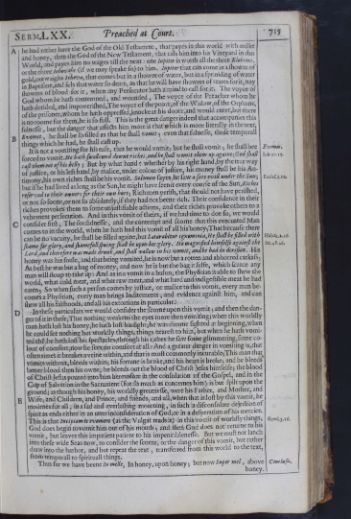 Serm. LXX.
Preached at Court.
715
he had rather have the God of the Old Testament, that payes in this world with milke
Serm. LXX.
Preached at Court.
715
he had rather have the God of the Old Testament, that payes in this world with milke
and honey, then the God of the New Testament, that cals him into his Vineyard in this
World, and payes him no wages till the next: one Iupiter is worth all the three Elohims,
or the three Iehovahs (if we may speake so) to him. Iupiter that can come in a showre of
gold, outwaighs Iehova, that comes but in a showre of water, but in a sprinkling of water
in Baptisme, and sels that water so deare, as that he will have showres of teares for it, nay
showres of blood for it, when any Persecutor hath a mind to call for it. The voyce of
God whom he hath contemned, and wounded, The voyce of the Preacher whom he
hath derided, and impoverished, The voyce of the poore, of the Widow, of the Orphans,
of the prisoner, whom he hath oppressed, knocke at his doore, and would enter, but there
is no roome for them, he is so full. This is the great danger indeed that accompanies this
fulnesse, but the danger that affects him more is that which is more literally in the text,
Evomet, he shall be so filled as that he shall vomit; even that fulnesse, those temporall
things which he had, he shall cast up.
It is not a vomiting for his ease, that he would vomit; but he shall vomit;Evomas. he shall bee
forced to vomit. He hath swallowed downe riches, and he shall vomit them up againe;Iob 20.15. God shall
cast them out of his belly; But by what hand? whether by his right hand, by the true way
of justice, or his left hand, by malice, under colour of justice, his money shall be his An-
timony, his own riches shall be his vomit. Solomon sayes, he saw a sore evill under the Sun;
Eccles. 5.12. but if he had lived as long as the Sun, he might have seen it every course of the Sun, Riches
reserved to their owners for their own hurt; Richmen perish, that should not have perished,
or not so soone, or not so absolutely, if they had not beene rich. Their confidence in their
riches provokes them to some unjustifiable actions, and their riches provoke others to a
vehement persecution. And in this vomit of theirs, if we had time to doe so, we would
consider first, The sordidnesse, and the contempt and scorne that this evacuated Man
comes to in the world, when he hath had this vomit of all his honey; That because there
can be no vacuity, he shall be filled againe, but Saturabitur ignominia, Habak. 2.16. He shall be filled with
shame for glory, and shamefull spuing shall be upon his glory.Ier. 48.26. He magnified himselfe against the
Lord, and therefore was made drunk, and shall wallow in his vomit, and be had in derision. His
honey was his soule, and that being vomited, he is now but a rotten and abhorred carkass;
At best he was but a bag of money, and now he is but the bag it selfe, which scarce any
man will stoop to take up: And as in a vomit in a bason, the Physitian is able to shew the
world, what cold meat, and what raw meat, and what hard and indigestible meat he had
eaten; So when such a person comes by justice, or malice to this vomit, every man be-
comes a Physitian, every man brings Inditements, and evidence against him, and can
shew all his falshoods, and all his extortions in particular.
In these particulars we would consider the scorne upon this vomit; and then the dan-
ger of it in these, That nothing weakens the eyes more then vomiting; when this worldly
man hath lost his honey, he hath lost his sight; he was dimme sighted at beginning, when
he could see nothing but worldly things, things nearest to him, but when he hath vomi-
ted thē, he hath lost his spectacles; through his riches he saw some glimmering, some co-
lour of comfort, now he sees no comfort at all: And a greater danger in vomiting is, that
often times it breakes a veine within, and that is most commonly incurable; This man that
vomits without, bleeds within; his fortune is broke, and his heart is broke; and he bleeds
better blood then his owne, he bleeds out the blood of Christ Jesus himselfe; the blood
of Christ Jesus poured into him heretofore in the consolation of the Gospel, and in the
Cup of Salvation in the Sacrament (for so much as concernes him) is but spilt upon the
ground; as though his honey, his worldly greatnesse, were his Father, and Mother, and
Wife, and Children, and Prince, and friends, and all, when that is lost by this vomit, he
mournes for all, in a sad and everlasting mourning, in such a disconsolate dejection of
spirit as ends either in an utter inconsideration of God, or in a desperation of his mercies.
This is that Incipiam te evomere (as the Vulgat reads it) in this vomit of worldly things, Revel. 3.16.
God does begin to vomit him out of his mouth; and then God does not returne to his
vomit, but leaves this impatient patient to his impenitiblenesse. But we must not lanchlaunch
into these wide Seas now, to consider the scorne, or the danger of this vomit, but rather
draw into the harbor, and but repeat the text, transferred from this world to the text,
from temporall to spirituall things.
Thus far we have beene In melle, In honey, upon honey; but now Super mel, Conclusio. above honey
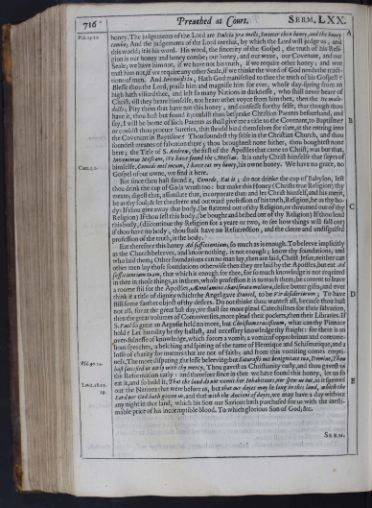 716
Preached at Court.
Serm. LXX.
honey.Psal. 19.10. The judgements of the Lord are Dulcia præ melle, Sweeter then honey, and the honey
716
Preached at Court.
Serm. LXX.
honey.Psal. 19.10. The judgements of the Lord are Dulcia præ melle, Sweeter then honey, and the honey
combe; And the judgements of the Lord are that, by which the Lord will judge us, and
this world; it is his word. His word, the sincerity of the Gospel, the truth of his Reli-
gion is our honey and honey combe; our honey, and our waxe, our Covenant, and our
Seale; we have him not, if we have not his truth, if we require other honey; and wee
trust him not, if we require any other Seale, if we thinke the word of God needs the tradi-
tions of men. And Invenisti tu, Hath God manifested to thee the truth of his Gospell?
Blesse thou the Lord, praise him and magnifie him for ever, whose day-spring from an
high hath visited thee, and left so many Nations in darknesse, who shall never heare of
Christ, till they heare himselfe, nor heare other voyce from him then, then the Ite male-
dicti; Pity them that have not this honey, and confesse for thy selfe, that though thou
have it, thou hast but found it; couldst thou bespeake Christian Parents beforehand, and
say, I will be borne of such Parents as shall give me a title to the Covenant, to Baptisme?
or couldst thou procure Sureties, that should bind themselves for thee, at the entring into
the Covenant in Baptisme? Thou foundest thy selfe in the Christian Church, and thou
foundest meanes of salvation there; thou broughtest none hither, thou boughtest none
here; the Title of S. Andrew, the first of the Apostles that came to Christ, was but that,
Invenimus Messiam, We have found the Messias. It is onely Christ himselfe that sayes of
himselfe, Cant. 5.1. Comedi mel meum, I have eat my honey, his owne honey. We have no grace, no
Gospel of our owne, we find it here.
But since thou hast found it, Comede, Eat it; do not drinke the cup of Babylon, lest
thou drink the cup of Gods wrath too: but make this Honey (Christs true Religion) thy
meate; digest that, assimilate that, incorporate that: and let Christ himself, and his merit,
be as thy soul; & let the cleere and outward profession of his truth, Religion, be as thy bo-
dy: If thou give away that body, (be flattered out of thy Religion, or threatned out of thy
Religion) If thou sell this body, (be bought and bribed out of thy Religion) If thou lend
this body, (discontinue thy Religion for a yeare or two, to see how things will fall out)
if thou have no body, thou shalt have no Resurrection, and the cleere and undisguised
profession of the truth, is the body.
Eat therefore this honey Ad sufficientiam; so much as is enough. To beleeve implicitly
as the Church beleeves, and know nothing, is not enough; know thy foundations, and
who laid them; Other foundations can no man lay, then are laid, Christ Jesus; neither can
other men lay those foundations otherwise then they are laid by the Apostles, but eat Ad
sufficientiam tuam, that which is enough for thee, for so much knowledge is not required
in thee in those things, as in them, whose profession it is to teach them; be content to leave
a roome stil for the Apostles, Æmulamini charismata meliora, desire better gifts; and ever
think it a title of dignity which the Angel gave Daniel, to be Vir desideriorum; To have
still some farther object of thy desires. Do not thinke thou wantest all, because thou hast
not all; for at the great last day, we shall see more plead Catechismes for their salvation,
then the great volumes of Controversies, more plead their pockets, then their Libraries. If
S. Paul so great an Argosie held no more, but Christum crucifixum, what can thy Pinnace
hold? Let humility be thy ballast, and necessary knowledge thy fraight: for there is an
over-fulnesse of knowledge, which forces a vomit; a vomit of opprobrious and contume-
lious speeches, a belching and spitting of the name of Heretique and Schismatique, and a
losse of charity for matters that are not of faith; and from this vomiting comes empti-
ness, The more disputing, Psal. 90.14. the lesse beleeving: but Saturasti nos benignitate tua, Domine, Thou
hast satisfied us early with thy mercy, Thou gavest us Christianity early, and thou gavest us
the Reformation early: and therefore since in thee we have found this honey, let us so
eat it, Levit. 18.25. and so hold it, That the land do not vomit her Inhabitants, nor spew us out, as it spewed
out the Nations that were before us, 29. but that our dayes may be long in this land, which the
Lord our God hath given us, and that with the Ancient of dayes, we may have a day without
any night in that land, which his Son our Saviour hath purchased for us with the inesti-
mable price of his incorruptible blood. To which glorious Son of God, &c. Serm.
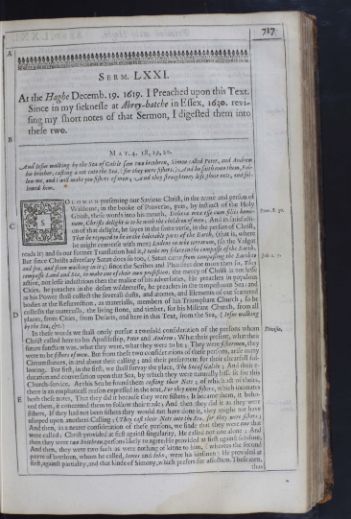 717
717
Serm. LXXI.
At the Haghe Decemb. 19. 1619. I Preached upon this Text.
Since in my sicknesse at Abrey-hatche in Essex, 1630. revi-
sing my short notes of that Sermon, I digested them into
these two.
Mat. 4. 18, 19, 20.
And Iesus walking by the Sea of Galile saw two brethren, Simon called Peter, and Andrew
his brother, casting a net into the Sea, (for they were fishers.) And he saith unto them, Fol-
low me, and I will make you fishers of men; And they straightway left their nets, and fol-
lowed him.
SOlomonSolomon presenting our Saviour Christ, in the name and person of
Wisdome, in the booke of Proverbs, puts, by instinct of the Holy
Ghost, these words into his mouth, Prov. 8.30. Deliciæ meæ esse cum filiis homi-
num, Christs delight is to be with the children of men; And in satisfacti-
on of that delight, he sayes in the same verse, in the person of Christ,
That he rejoyced to be in the habitable parts of the Earth, (that is, where
he might converse with men) Ludens in orbe terrarum, (so the Vulgat
reads it) and so our former Translation had it, I tooke my solace in the compasse of the Earth.
But since Christs adversary Satan does so too, Job 1.7. (Satan came from compassing the Earth to
and fro, and from walking in it;) since the Scribes and Pharisees doe more then so, They
compasse Land and Sea, to make one of their own profession, the mercy of Christ is not lesse
active, not lesse industrious then the malice of his adversaries, He preaches in populous
Cities, he preaches in the desart wildernesse, he preaches in the tempestuous Sea: and
as his Power shall collect the severall dusts, and atomes, and Elements of our scattered
bodies at the Resurrection, as materialls, members of his Triumphant Church; so he
collects the materialls, the living stone, and timber, for his Militant Church, from all
places, from Cities, from Desarts, and here in this Text, from the Sea, (Iesus walking
by the Sea, &c.)
In these words we shall onely pursue a twofold consideration of the persons whom
Christ called here to his Apostleship, Divisio. Peter and Andrew; What their present, what their
future function was, what they were, what they were to be; They were fishermen, they
were to be fishers of men. But from these two considerations of these persons, arise many
Circumstances, in and about their calling; and their preferment for their chearfull fol-
lowing. For first, in the first, we shall survay the place, The Sea of Galile; And their e-
ducation and conversation upon that Sea, by which they were naturally lesse fit for this
Church-service. At this Sea he found them casting their Nets; of which act of theirs,
there is an emphaticall reason expressed in the text, For they were fishers, which intimates
both these notes, That they did it because they were fishers; It became them, it beho-
ved them, it concerned them to follow their trade; And then they did it as they were
fishers, If they had not been fishers they would not have done it, they might not have
usurped upon anothers Calling; (They cast their Nets into the Sea, for they were fishers)
And then, in a nearer consideration of these persons, we finde that they were two that
were called; Christ provided at first against singularity, He called not one alone; And
then they were two Brethren, persons likely to agree; He provided at first against schisme;
And then, they were two such as were nothing of kinne to him, (whereas the second
payre of brethren, whom he called, Iames and Iohn, were his kinsmen) He provided at
first, against partiality, and that kinde of Simony, which prefers for affection. These men, thus
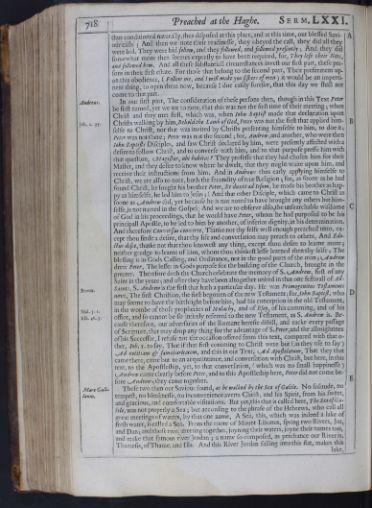 718
Preached at the Haghe.
Serm. LXXI.
thus conditioned naturally, thus disposed at this place, and at this time, our blessed Savi-
718
Preached at the Haghe.
Serm. LXXI.
thus conditioned naturally, thus disposed at this place, and at this time, our blessed Savi-our calls; And then we note their readinesse, they obeyed the call, they did all they
were bid, They were bid follow, and they followed, and followed presently; And they did
somewhat more then seemes expresly to have been required, for, They left their Nets,
and followed him. And all these substantiall circumstances invest our first part, these per-
sons in their first estate. For those that belong to the second part, Their preferment up-
on this obedience, (Follow me, and I will make you fishers of men) it would be an imperti-
nent thing, to open them now, because I doe easily foresee, that this day we shall not
come to that part.
In our first part, Andreas. The consideration of these persons then, though in this Text Peter
be first named, yet we are to note, that this was not the first time of their meeting; when
Christ and they met first, which was, when Iohn Baptist made that declaration upon
Christs walking by him, Joh. 1. 35. Behold the Lamb of God, Peter was not the first that applied him-
selfe to Christ, nor that was invited by Christs presenting himselfe to him, to doe it;
Peter was not there; Peter was not the second; for, Andrew, and another, who were then
Iohn Baptists Disciples, and saw Christ declared by him, were presently affected with a
desire to follow Christ, and to converse with him, and to that purpose presse him with
that question, Magister, ubi habitas? They professe that they had chosen him for their
Master, and they desire to know where he dwelt, that they might waite upon him, and
receive their instructions from him. And in Andrews thus early applying himselfe to
Christ, we are also to note, both the fecundity of true Religion; for, as soone as he had
found Christ, he sought his brother Peter, Et duxit ad Iesum, he made his brother as hap-
py as himselfe, he led him to Jesus; (And that other Disciple, which came to Christ as
soone as Andrew did, yet because he is not noted to have brought any others but him-
selfe, is not named in the Gospel) And we are to observe also, the unsearchable wisdome
of God in his proceedings, that he would have Peter, whom he had purposed to be his
principall Apostle, to be led to him by another, of inferior dignity, in his determination.
And therefore Conversus converte, Thinke not thy selfe well enough preached unto, ex-
cept thou finde a desire, that thy life and conversation may preach to others, And Edo-
ctus disce, thinke not that thou knowest any thing, except thou desire to learne more;
neither grudge to learne of him, whom thou thinkest lesse learned then thy selfe; The
blessing is in Gods Calling, and Ordinance, not in the good parts of the man; Andrew
drew Peter, The lesser in Gods purpose for the building of the Church, brought in the
greater. Therefore doth the Church celebrate the memory of S. Andrew, first of any
Saint in the yeare; and after they have been altogether united in that one festivall of All-
Saints, S. Andrew is the first that hath a particular day.Bernar. He was Primogenitus Testamenti
novi, The first Christian, the first begotten of the new Testament; for, Iohn Baptist, who
may seeme to have the birthright before him, had his conception in the old Testament,
in the wombe of those prophecies of Malachy,Mal. 3.1. and of Esay, of his comming, and of his
office, and so cannot be so intirely referred to the new Testament, as S. Andrew is. Esa. 40.3. Be-
cause therefore, our adversaries of the Romane heresie distill, and racke every passage
of Scripture, that may drop any thing for the advantage of S. Peter, and the allmightines
of his Successor, I refuse not the occasion offered from this text, compared with that o-
ther, Ioh. 1. to say, That if that first comming to Christ were but (as they use to say)
Ad notitiam & familiaritatem, and this in our Text, Ad Apostolatum, That they that
came there, came but to an acquaintance, and conversation with Christ, but here, in this
text, to the Apostleship, yet, to that conversation, (which was no small happinesse)
Andrew came clearly before Peter, and to this Apostleship here, Peter did not come be-
fore Andrew; they came together.
These two then our Saviour found, Mare Gali-
læum. as he walked by the Sea of Galile. No solitude, no
tempest, no bleaknesse, no inconvenience averts Christ, and his Spirit, from his sweet,
and gracious, and comfortable visitations. But yet, this that is called here, The Sea of Ga-
lile, was not properly a Sea; but according to the phrase of the Hebrews, who call all
great meetings of waters, by that one name, A Sea, this, which was indeed a lake of
fresh water, is called a Sea. From the roote of Mount Libanus, spring two Rivers, Jor,
and Dan; and those two, meeting together, joyning their waters, joyne their names too,
and make that famous river Jordan; a name so composed, as perchance our River is,
Thamesis, of Thame, and Isis. And this River Jordan falling into this flat, makes this lake,
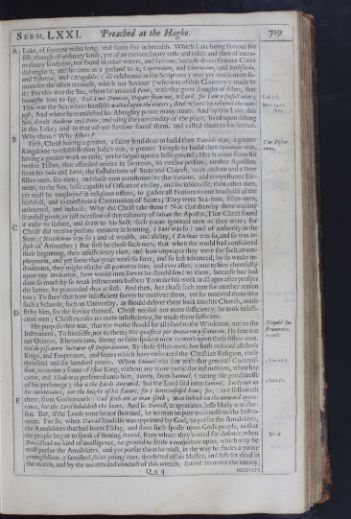 Serm. LXXI.
Preached at the Haghe.
719
Lake, of sixteene miles long, and some sixe in breadth. Which Lake being famous for
Serm. LXXI.
Preached at the Haghe.
719
Lake, of sixteene miles long, and some sixe in breadth. Which Lake being famous for
fish, though of ordinary kinds, yet of an extraordinary taste and relish, and then of extra-
ordinary kinds too, not found in other waters, and famous, because divers famous Cities
did engirt it, and become as a garland to it, Capernaum, and Chorazim, and Bethsaida,
and Tiberias, and Magdalo, (all celebrated in the Scriptures) was yet much more fa-
mous for the often recourse, which our Saviour (who was of that Countrey) made to
it; For this was the Sea, where he amazed Peter, with that great draught of fishes, that
brought him to say, Exi à me Domine, Depart from me, O Lord, for I am a sinfull man;Luk. 5.8.
This was the Sea, where himselfe walked upon the waters;Matt. 14.25.
8.23. And where he rebuked the tem-
pest; And where he manifested his Almighty power many times. And by this Lake, this
Sea, dwelt Andrew and Peter, and using the commodity of the place, lived upon fishing
in this Lake; and in that act our Saviour found them, and called them to his service.
Why them? Why fishers?
First, Christ having a greater, a fairer Jerusalem to build then Davids was, Cur Pisca-
tores. a greater
Kingdome to establish then Juda's was, a greater Temple to build then Solomons was,
having a greater work to raise, yet he begun upon a lesse ground; Hee is come from his
twelve Tribes, that afforded armies in swarmes, to twelve persons, twelve Apostles;
from his Iuda and Levi, the foundations of State and Church, to an Andrew and a Peter
fisher-men, sea-men; and these men accustomed to that various, and tempestuous Ele-
ment, to the Sea, lesse capable of Offices of civility, and sociablenesse, then other men,
yet must be employed in religious offices, to gather all Nations to one houshold of the
faithfull, and to constitute a Communion of Saints; They were Sea-men, fisher-men,
unlearned, and indocil; Why did Christ take them? Not that thereby there was any
scandall given, or just occasion of that calumny of Iulian the Apostat, That Christ found
it easie to seduce, and draw to his Sect, such poore ignorant men as they were; for
Christ did receive persons eminent in learning, (Saul was so) and of authority in the
State, (Nicodemus was so) and of wealth, and ability, (Zacheus was so, and so was Io-
seph of Arimathea) But first he chose such men, that when the world had considered
their beginning, their insufficiency then, and how unproper they were for such an em-
ployment, and yet seene that great work so farre, and so fast advanced, by so weake in-
struments, they might ascribe all power to him, and ever after, come to him cheerfully
upon any invitation, how weake men soever he should send to them, because hee had
done so much by so weak instruments before: To make his work in all ages after prosper
the better, he proceeded thus at first. And then, hee chose such men for another reason
too; To shew that how insufficient soever he received them, yet he received them into
such a Schoole, such an University, as should deliver them back into his Church, made
fit by him, for the service thereof. Christ needed not mans sufficiency, he took insuffi-
cient men; Christ excuses no mans insufficiency, he made them sufficient.
His purpose then was, that the worke should be ascribed to the Workman, Nequid In-
strumentis. not to the
Instrument; To himselfe, not to them; Nec quæsivit per Oratorem piscatorem, He sent not
out Orators, Rhetoricians, strong or faire-spoken men to work upon these fisher-men, August.
Sed de piscatore lucratus est Imperatorem, By these fisher-men, hee hath reduced all those
Kings, and Emperours, and States which have embraced the Christian Religion, these
thousand and six hundred yeares. When Samuel was sent with that generall Commis-
sion, 1 Sam. 16.6. to anoint a sonne of Ishai King, without any more particular instructions, when hee
came, and Eliab was presented unto him, Surely, sayes Samuel,1 Sam. 30. (noting the goodlinesse
of his personage) this is the Lords Anointed. But the Lord said unto Samuel, Looke not on
his countenance, nor the height of his stature, for I have refused him; for, (as it followeth
there, from Gods mouth) God seeth not as man setthseeth; Man looketh on the outward appea-
rance, but the Lord beholdeth the heart. And so David, in apparanceappearance, lesse likely was cho-
sen. But, if the Lords arme be not shortned, let no man impute weaknesse to the Instru-
ment. For so, when David himselfe was appointed by God, to pursue the Amalekites,
the Amalekites that had burnt Ziklag, and done such spoile upon Gods people, as that
the people began to speak of stoning David, from whom they looked for defence, Ver 6. when
David had no kind of intelligence, no ground to settle a conjecture upon, which way he
must pursue the Amalekites, and yet pursue them he must, in the way he findes a poore
young fellow, a famished, sicke young man, derelicted of his Master, and left for dead in
the march, and by the meanes and conduct of this wretch, David recovers the enemy, Qqq recovers
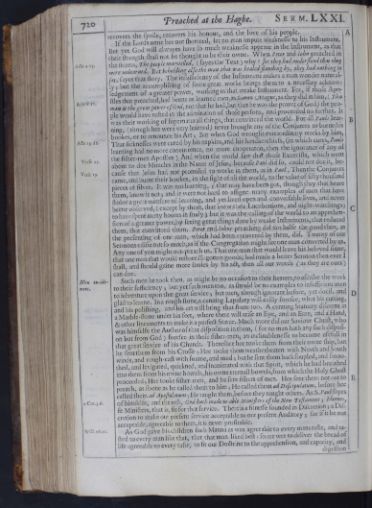 720
Preached at the Haghe.
Serm. LXXI.
recovers the spoile, recovers his honour, and the love of his people.
720
Preached at the Haghe.
Serm. LXXI.
recovers the spoile, recovers his honour, and the love of his people.
If the Lords arme bee not shortned, let no man impute weaknesse to his Instrument.
But yet God will alwayes have so much weaknesse appeare in the Instrument, as that
their strength shall not be thought to be their owne. When Peter and Iohn preached in
the streets, Acts 4.13. The people marvelled, (sayes the Text) why? for they had understood that they
were unlearned. But beholding also the man that was healed standing by, they had nothing to
say, sayes that story. The insufficiency of the Instrument makes a man wonder natural-
ly; but the accomplishing of some great worke brings them to a necessary acknow-
ledgement of a greater power, working in that weake Instrument. For, if those Apo-
stles that preached, Acts 8.10. had beene as learned men, as Simon Magus, as they did in him, (This
man is the great power of God, not that he had, but that he was the power of God) the peo-
ple would have rested in the admiration of those persons, and proceeded no farther. It
was their working of supernaturall things, that convinced the world. For all Pauls lear-
ning, (though hee were very learned) never brought any of the Conjurers to burne his
bookes, or to renounce his Art; But when God wrought extraordinary works by him,
That sicknesses were cured by his napkins, Acts 19.11. and his handkerchiefs, (in which cures, Pauls
learning had no more concurrence, no more cooperatoncooperation, then the ignorance of any of
the fisher-men Apostles) And when the world saw that those Exorcists, Verse 13. which went
about to doe Miracles in the Name of Jesus, because Paul did so, could not doe it, be-
cause that Jesus had not promised to worke in them, Verse 19. as in Paul, Then the Conjurers
came, and burnt their bookes, in the sight of all the world, to the value of fifty thousand
pieces of silver. It was not learning, (that may have been got, though they that heare
them, know it not; and it were not hard to assigne many examples of men that have
stolne a great measure of learning, and yet lived open and conversable lives, and never
beene observed, (except by them, that knew their Lucubrations, and night-watchings)
to have spent many houres in study) but it was the calling of the world to an apprehen-
sion of a greater power, by seeing great things done by weake Instruments, that reduced
them, that convinced them. Peter and Iohns preaching did not halfe the good then, as
the presenting of one man, which had been recovered by them, did. Twenty of our
Sermons edifie not so much, as if the Congregation might see one man converted by us.
Any one of you might out-preach us. That one man that would leave his beloved sinne,
that one man that would restore ill-gotten goods, had made a better Sermon then ever I
shall, and should gaine more soules by his act, then all our words (as they are ours)
can doe.
Such men he took then, Non in-ido-
neos. as might be no occasion to their hearers, to ascribe the work
to their sufficiency; but yet such men too, as should be no examples to insufficient men
to adventure upon that great service; but men, though ignorant before, yet docil, and
glad to learne. In a rough stone, a cunning Lapidary will easily foresee, what his cutting,
and his polishing, and his art will bring that stone too. A cunning Statuary discerns in
a Marble-stone under his feet, where there will arise an Eye, and an Eare, and a Hand,
& other lineaments to make it a perfect Statue. Much more did our Saviour Christ, who
was himselfe the Author of that disposition in them, (for no man hath any such disposi-
on but from God) foresee in these fisher-men, an inclinablenesse to become usefull in
that great service of his Church. Therefore hee tooke them from their owne ship, but
he sent them from his Crosse; Hee tooke them weatherbeaten with North and South
winds, and rough-cast with foame, and mud; but he sent them back soupled, and smoo-
thed, and levigated, quickned, and inanimated with that Spirit, which he had breathed
into them from his owne bowels, his owne eternall bowels, from which the Holy Ghost
proceeded; Hee tooke fisher-men, and he sent fishers of men. Hee sent them not out to
preach, as soone as he called them to him; He called them ad Discipulatum, before hee
called them ad Apostolatum; He taught them, before they taught others. As S. Paul sayes
of himselfe, 2 Cor. 3.6. and the rest, God hath made us able Ministers of the New Testament; Idoneos,
fit Ministers, that is, fit for that service. There is a fitnesse founded in Discretion; a Dis-
cretion to make our present service acceptable to our present Auditory; for if it be not
acceptable, agreeable to them, it is never profitable.
As God gave his children such Manna as was agreeable to every mans taste, and ta-
sted to every man like that, that that man like best: so are wee to deliver the bread of
life agreeable to every taste, to fit our Doctrine to the apprehension, and capacity, and digestion
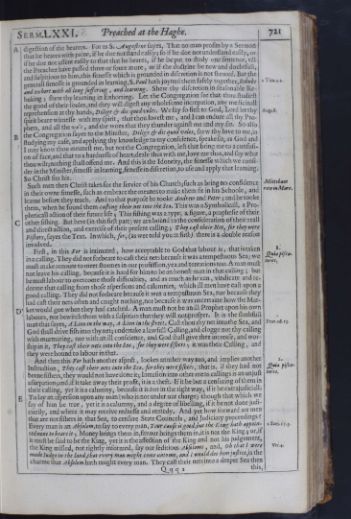 Serm. LXXI.
Preached at the Haghe.
721
digestion of the hearers. For as S. Augustine sayes, That no man profits by a Sermon
Serm. LXXI.
Preached at the Haghe.
721
digestion of the hearers. For as S. Augustine sayes, That no man profits by a Sermon
that he heares with paine, if he doe not stand easily; so if he doe not understand easily, or
if he doe not assent easily to that that he heares, if he be put to study one sentence, till
the Preacher have passed three or foure more, or if the doctrine be new and doubtfull,
and suspitious to him, this fitnesse which is grounded in discretion is not shewed. But the
generall fitnesse is grounded in learning, S. Paul hath joyned them safely together, 2 Tim. 4.2. Rebuke
and exhort with all long suffering, and learning. Shew thy discretion in seasonable Re-
buking; shew thy learning in Exhorting. Let the Congregation see that thou studiest
the good of their soules, and they will digest any wholesome increpation, any medicinall
reprehension at thy hands, Dilige & dic quod voles. We say so first to God, August. Lord let thy
spirit beare witnesse with my spirit, that thou lovest me, and I can endure all thy Pro-
phets, and all the væ's, and the woes that they thunder against me and my sin. So also
the Congregation sayes to the Minister, Dilige & dic quod voles, shew thy love to me, in
studying my case, and applying thy knowledge to my conscience, speake so, as God and
I may know thou meanest me, but not the Congregation, lest that bring me to a confusi-
on of face, and that to a hardnesse of heart; deale thus with me, love me thus, and say what
thou wilt; nothing shall offend me. And this is the Idoneity, the fitnesse which we consi-
der in the Minister, fitnesse in learning, fitnesse in discretion, to use and apply that learning.
So Christ fits his.
Such men then Christ takes for the service of his Church; Mittebant
rete in Mare. such as bring no confidence
in their owne fitnesse, such as embrace the meanes to make them fit in his Schoole, and
learne before they teach. And to that purpose he tooke Andrew and Peter; and he tooke
them, when he found them casting their net into the Sea. This was a Symbolicall, a Pro-
pheticall action of their future life; This fishing was a type, a figure, a prophesie of their
other fishing. But here (in this first part) we are bound to the consideration of their reall
and direct action, and exercise of their present calling; They cast their Net, for they were
Fishers, sayes the Text. In which, for, (as wee told you at first) there is a double reason
involved.
First, in this For is intimated, how acceptable to God that labour is, 1. Quia pisca-
tores. that is taken
in a calling. They did not forbeare to cast their nets because it was a tempestuous Sea; we
must make account to meet stormes in our profession, yea and tentations too. A man must
not leave his calling, because it is hard for him to be an honest man in that calling; but
he must labour to overcome those difficulties, and as much as he can, vindicate and re-
deeme that calling from those aspersions and calumnies, which ill men have cast upon a
good calling. They did not forbeare because it was a tempestuous Sea, nor because they
had cast their nets often and caught nothing, nor because it was uncertaine how the Mar-
ket would goe when they had catched. A man must not be an ill Prophet upon his own
labours, nor bewitch them with a suspition that they will not prosper. It is the slothfull
man that sayes, A Lion in the way, A Lion in the street. Cast thou thy net into the Sea, Prov. 26.13. and
God shall drive fish into thy net; undertake a lawfull Calling, and clogge not thy calling
with murmuring, nor with an ill conscience, and God shall give thee increase, and wor-
ship in it, They cast their nets into the Sea, for they were fishers; it was their Calling, and
they were bound to labour in that.
And then this For hath another aspect, lookes another way too, 2. Quia pisca-
tores. and implies another
Instruction, They cast their nets into the Sea, for they were fishers, that is, if they had not
beene fishers, they would not have done it; Intrusion into other mens callings is an unjust
usurpation; and, if it take away their profit, it is a theft. If it be but a censuring of them in
their calling, yet it is a calumny, because it is not in the right way, if it be extrajudiciall.
To lay an aspersion upon any man (who is not under our charge) though that which we
say of him be true, yet it is a calumny, and a degree of libelling, if it be not done judi-
ciarily, and where it may receive redresse and remedy. And yet how forward are men
that are not fishers in that Sea, to censure State Councels, and Judiciary proceedings?
Every man is an Absolom, to say to every man, 2 Sam. 15.3. Your cause is good, but the King hath appoin-
ted none to heare it; Money brings them in, favour brings them in, it is not the King; or, if
it must be said to be the King, yet it is the affection of the King and not his judgement,
the King misled, not rightly informed, say our seditious Absoloms, and, Ver. 4. Oh that I were
made Iudge in the land, that every man might come unto me, and I would doe him justice, is the
charme that Absolom hath taught every man. They cast their nets into a deeper Sea then Qqq2 this,
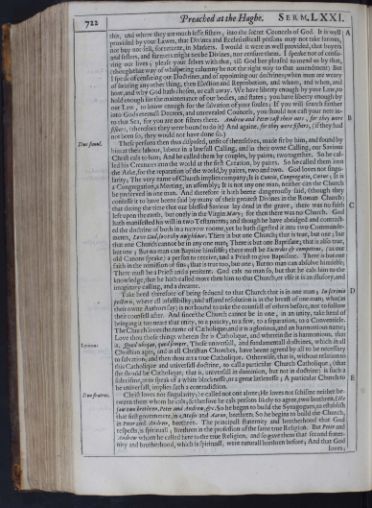 722
Preached at the Haghe.
Serm. LXXI.
this, and where they are much lesse fishers, into the secret Councels of God. It is well
722
Preached at the Haghe.
Serm. LXXI.
this, and where they are much lesse fishers, into the secret Councels of God. It is well
provided by your Lawes, that Divines and Ecclesiasticall persons may not take farmes,
nor buy nor sell, for returne, in Markets. I would it were as well provided, that buyers
and sellers, and farmers might not be Divines, nor censure them. I speake not of censu-
ring our lives; please your selves with that, till God bee pleased to mend us by that,
(though that way of whispering calumny be not the right way to that amendment) But
I speak of censuring our Doctrines, and of appointing our doctrines; when men are weary
of hearing any other thing, then Election and Reprobation, and whom, and when, and
how, and why God hath chosen, or cast away. We have liberty enough by your Law, to
hold enough for the maintenance of our bodies, and states; you have liberty enough by
our Law, to know enough for the salvation of your soules; If you will search farther
into Gods eternall Decrees, and unrevealed Councels, you should not cast your nets in-
to that Sea, for you are not fishers there. Andrew and Peter cast their nets, for they were
fishers, (therefore they were bound to do it) And againe, for they were fishers, (if they had
not been so, they would not have done so.)
These persons then thus disposed, Duo simul. unfit of themselves, made fit by him, and found by
him at their labour, labour in a lawfull Calling, and in their owne Calling, our Saviour
Christ cals to him; And he called them by couples, by paires; two together. So he cal-
led his Creatures into the world at the first Creation, by paires. So he called them into
the Arke, for the reparation of the world, by paires, two and two. God loves not singu-
larity; The very name of Church implies company; It is Concio, Congregatio, Cœtus; It is
a Congregation, a Meeting, an assembly; It is not any one man; neither can the Church
be preserved in one man. And therefore it hath beene dangerously said, (though they
confesse it to have beene said by many of their greatest Divines in the Roman Church)
that during the time that our blessed Saviour lay dead in the grave, there was no faith
left upon the earth, but onely in the Virgin Mary; for then there was no Church. God
hath manifested his will in two Testaments; and though he have abridged and contract-
ed the doctrine of both in a narrow roome, yet he hath digested it into two Commande-
ments, Love God, love thy neighbour. There is but one Church; that is true, but one; but
that one Church cannot be in any one man; There is but one Baptisme; that is also true,
but one; But no man can Baptize himselfe; there must be Sacerdos & competens, (as our
old Canons speake) a person to receive, and a Priest to give Baptisme. There is but one
faith in the remission of sins; that is true too, but one; But no man can absolve himselfe;
There must be a Priest and a penitent. God cals no man so, but that he cals him to the
knowledge, that he hath called more then him to that Church, or else it is an illusory, and
imaginary calling, and a dreame.
Take heed therefore of being seduced to that Church that is in one man; In scrinio
pectoris, where all infallibility, and assured resolution is in the breast of one man; who (as
their owne Authors say) is not bound to aske the counsell of others before, nor to follow
their counsell after. And since the Church cannot be in one, in an unity, take heed of
bringing it too neare that unity, to a paucity, to a few, to a separation, to a Conventicle.
The Church loves the name of Catholique; and it is a glorious, and an harmonious name;
Love thou those things wherein she is Catholique, and wherein she is harmonious, that
is, Lyrinen. Quod ubique, quod semper, Those universall, and fundamentall doctrines, which in all
Christian ages, and in all Christian Churches, have beene agreed by all to be necessary
to salvation; and then thou art a true Catholique. Otherwise, that is, without relation to
this Catholique and universall doctrine, to call a particular Church Catholique, (that
she should be Catholique, that is, universall in dominion, but not in doctrine) is such a
solecisme, as to speak of a white blacknesse, or a great littlenesse; A particular Church to
be universall, implies such a contradiction.
Christ loves not singularity;Duo fratres. he called not one alone; He loves not schisme neither be-
tween them whom he cals; & therfore he cals persons likely to agree, two brethren, (He
saw two brethren, Peter and Andrew, &c.) So he began to build the Synagogues, to establish
that first government, in Moses and Aaron, brethren; So he begins to build the Church,
in Peter and Andrew, brethren. The principall fraternity and brotherhood that God
respects, is spirituall; Brethren in the profession of the same true Religion. But Peter and
Andrew whom he called here to the true Religion, and so gave them that second frater-
nity and brotherhood, which is spirituall, were naturall brethren before; And that God loves;
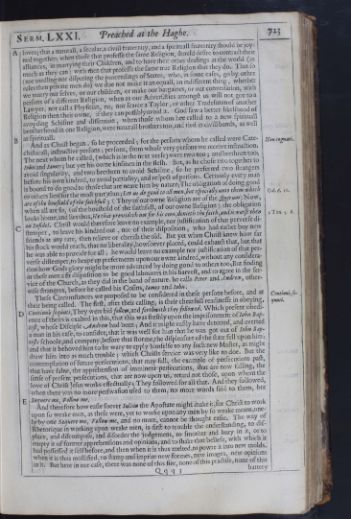 Serm. LXXI.
Preached at the Haghe.
723
loves; that a naturall, a secular, a civill fraternity, and a spirituall fraternity should be joy-
Serm. LXXI.
Preached at the Haghe.
723
loves; that a naturall, a secular, a civill fraternity, and a spirituall fraternity should be joy-ned together; when those that professe the same Religion, should desire to contract their
alliances, in marrying their Children, and to have their other dealings in the world (as
much as they can) with men that professe the same true Religion that they do. That so
(not medling nor disputing the proceedings of States, who, in some cases, go by other
rules then private men do) we doe not make it an equall, an indifferent thing, whether
we marry our selves, or our children, or make our bargaines, or our conversation, with
persons of a different Religion, when as our Adversaries amongst us will not goe to a
Lawyer, nor call a Physitian, no, nor scarce a Taylor, or other Tradesman of another
Religion then their owne, if they can possibly avoid it. God saw a better likelihood of
avoyding Schisme and dissention, when those whom hee called to a new spirituall
brotherhood in one Religion, were naturall brothers too, and tied in civill bands, as well
as spirituall.
And as Christ began, so he proceeded;Non cognati. for the persons whom he called were Cate-
chisticall, instructive persons; persons, from whose very persons we receive instruction.
The next whom he called, (which is in the next verse) were two too; and brethren too;
Iohn and Iames; but yet his owne kinsmen in the flesh. But, as he chose two together to
avoid singularity, and two brethren to avoid Schisme, so he preferred two strangers
before his own kindred, to avoid partiality, and respect of persons. Certainly every man
is bound to do good to those that are neare him by nature; The obligation of doing good
to others lies (for the most part) thus; Gal. 6.10. Let us do good to all men, but especially unto them which
are of the houshold of the faithfull; (They of our owne Religion are of the Quorum) Now,
when all are so, (of the houshold of the faithfull, of our owne Religion) the obligation
looks home, and lies thus, 1 Tim. 5.8. He that provideth not for his own, denieth the faith, and is worse then
an Infidel. Christ would therefore leave no example, nor justification of that perverse di-
stemper, to leave his kindred out, nor of their disposition, who had rather buy new
friends at any rate, then relieve or cherish the old. But yet when Christ knew how far
his stock would reach, that no liberality, howsoever placed, could exhaust that, but that
he was able to provide for all, he would leave no example nor justification of that per-
verse distemper, to heape up preferments upon our owne kindred, without any considera-
tion how Gods glory might be more advanced by doing good to others too; But finding
in these men a fit disposition to be good labourers in his harvest, and to agree in the ser-
vice of the Church, as they did in the band of nature, he calls Peter and Andrew, other-
wise strangers, before he called his Cosins, Iames and Iohn.
These Circumstances we proposed to be considered in these persons before, Continuò se-
quuti. and at
their being called. The first, after their calling, is their chearfull readinesse in obeying,
Continuò sequuti, They were bid follow, and forthwith they followed. Which present obedi-
ence of theirs is exalted in this, that this was freshly upon the imprisonment of Iohn Bap-
tist, whose Disciple Andrew had been; And it might easily have deterred, and averted
a man in his case, to consider, that it was well for him that he was got out of Iohn Bap-
tists schoole, and company, before that storme, the displeasure of the state fell upon him;
and that it behoved him to be wary to apply himselfe to any such new Master, as might
draw him into as much trouble; which Christs service was very like to doe. But the
contemplation of future persecutions, that may fall, the example of persecutions past,
that have falne, the apprehension of imminent persecutions, that are now falling, the
sense of present persecutions, that are now upon us, retard not those, upon whom the
love of Christ Jesus works effectually; They followed for all that. And they followed,
when there was no more perswasion used to them, no more words said to them, but
Sequere me, Follow me.
And therefore how easie soever Iulian the Apostate might make it, for Christ to work
upon so weake men, as these were, yet to worke upon any men by so weake means, one-
ly by one Sequere me, Follow me, and no more, cannot be thought easie. The way of
Rhetorique in working upon weake men, is first to trouble the understanding, to dis-
place, and discompose, and disorder the judgement, to smother and bury in it, or to
empty it of former apprehensions and opinions, and to shake that beliefe, with which it
had possessed it self before, and then when it is thus melted, to powre it into new molds,
when it is thus mollified, to stamp and imprint new formes, new images, new opinions
in it. But here in our case, there was none of this fire, none of this practise, none of this Qqq3 battery
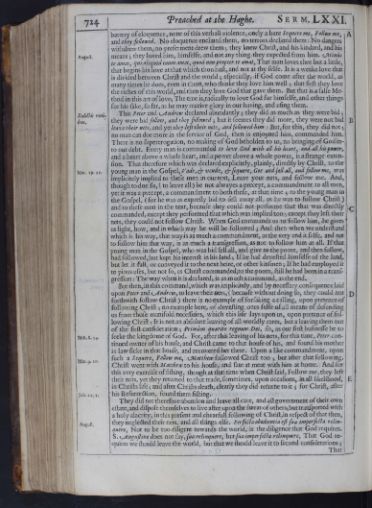 724
Preached at the Haghe.
Serm. LXXI.
battery of eloquence, none of this verball violence, onely a bare Sequere me, Follow me,
724
Preached at the Haghe.
Serm. LXXI.
battery of eloquence, none of this verball violence, onely a bare Sequere me, Follow me,
and they followed. No eloquence enclined them, no terrors declined them: No dangers
withdrew them, no preferment drew them; they knew Christ, and his kindred, and his
means;August. they loved him, himselfe, and not any thing they expected from him. Minùs
te amat, qui aliquid tuum amat, quod non propter te amat, That man loves thee but a little,
that begins his love at that which thou hast, and not at thy selfe. It is a weake love that
is divided between Christ and the world; especially, if God come after the world, as
many times he does, even in them, who thinke they love him well; that first they love
the riches of this world, and then they love God that gave them. But that is a false Me-
thod in this art of love; The true is, radically to love God for himselfe, and other things
for his sake, so far, as he may receive glory in our having, and using them.
This Peter and Andrew declared abundantly; Relictis reti-
bus. they did as much as they were bid;
they were bid follow, and they followed; but it seemes they did more, they were not bid
leave their nets, and yet they left their nets, and followed him: But, for this, they did not;
no man can doe more in the service of God, then is enjoyned him, commanded him.
There is no supererogation, no making of God beholden to us, no bringing of God in-
to our debt. Every man is commanded to love God with all his heart, and all his power,
and a heart above a whole heart, and a power above a whole power, is a strange exten-
sion. That therefore which was declared explicitely, plainly, directly by Christ, to the
young man in the Gospel, Mat. 19.21. Vade, & vende, & sequere, Goe and sell all, and follow me, was
implicitely implied to these men in our text, Leave your nets, and follow me. And,
though to doe so, (to leave all) be not alwayes a precept, a commandment to all men,
yet it was a precept, a commandment to both these, at that time; to the young man in
the Gospel, (for he was as expresly bid to sell away all, as he was to follow Christ)
and to these men in the text, because they could not performe that that was directly
commanded, except they performed that which was implied too; except they left their
nets, they could not follow Christ. When God commands us to follow him, he gives
us light, how, and in which way he will be followed; And then when we understand
which is his way, that way is as much a commandment, as the very end it selfe, and not
to follow him that way, is as much a transgression, as not to follow him at all. If that
young man in the Gospel, who was bid sell all, and give to the poore, and then follow,
had followed, but kept his interest in his land; If he had devested himselfe of the land,
but let it fall, or conveyed it to the next heire, or other kinsmen; If he had employed it
to pious uses, but not so, as Christ commanded, to the poore, still he had been in a trans-
gression: The way when it is declared, is as much a command, as the end.
But then, in this command, which was implicitely, and by necessary consequence laid
upon Peter and Andrew, to leave their nets, (because without doing so, they could not
forthwith follow Christ) there is no example of forsaking a calling, upon pretence of
following Christ; no example here, of devesting ones selfe of all means of defending
us from those manifold necessities, which this life lays upon us, upon pretence of fol-
lowing Christ; It is not an absolute leaving of all worldly cares, but a leaving them out
of the first consideration; Primùm quærite regnum Dei, so, as our first businesse be to
seeke the kingdome of God.Mat. 8.14. For, after this leaving of his nets, for this time, Peter con-
tinued owner of his house, and Christ came to that house of his, and found his mother
in law sicke in that house, and recovered her there. Upon a like commandment, upon
such a Sequere, Mat. 9.10. Follow me, Matthew followed Christ too; but after that following,
Christ went with Matthew to his house, and sate at meat with him at home. And for
this very exercise of fishing, though at that time when Christ said, Follow me, they left
their nets, yet they returned to that trade, sometimes, upon occasions, in all likelihood,
in Christs life; and after Christs death, clearly they did returne to it; for Christ, after
his Resurrection, Joh. 21.1. found them fishing.
They did not therefore abandon and leave all care, and all government of their own
estate, and dispose themselves to live after upon the sweat of others; but transported with
a holy alacrity, in this present and chearfull following of Christ, in respect of that then,
they neglected their nets, and all things else. Perfecta obedientia est sua imperfecta relin-
quere, Not to be too diligent towards the world, August. is the diligence that God requires.
S. Augustine does not say, sua relinquere, but sua imperfecta relinquere, That God re-
quires we should leave the world, but that we should leave it to second considerations; That
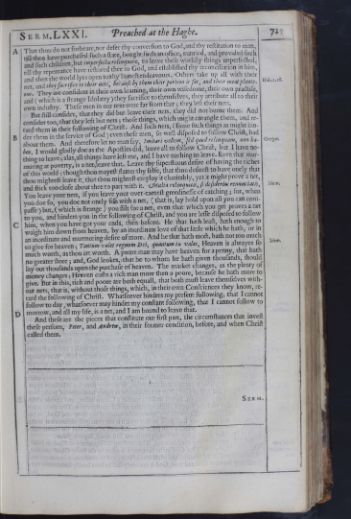 Serm. LXXI.
Preached at the Haghe.
725
That thou do not forbeare, nor defer thy conversion to God, and thy restitution to man,
Serm. LXXI.
Preached at the Haghe.
725
That thou do not forbeare, nor defer thy conversion to God, and thy restitution to man,
till thou have purchased such a state, bought such an office, married, and provided such
and such children, but imperfecta relinquere, to leave these worldly things unperfected,
till thy repentance have restored thee to God, and established thy reconciliation in him,
and then the world lyes open to thy honest endeavours. Others take up all with their
net, andHab. 1.16. they sacrifice to their nets, because by them their portion is fat, and their meat plente-
ous. They are confident in their own learning, their own wisedome, their own practise,
and (which is a strange Idolatry) they sacrifice to themselves, they attribute all to their
own industry. These men in our text were far from that; they left their nets.
But still consider, that they did but leave their nets, they did not burne them. And
consider too, that they left but nets; those things, which might entangle them, and re-
tard them in their following of Christ. And such nets, (some such things as might hin-
der them in the service of God) even these men, so well disposed to follow Christ, had
about them. And therefore let no man say, Gregor. Imitari vellem, sed quod relinquam, non ha-
beo, I would gladly doe as the Apostles did, leave all to follow Christ, but I have no-
thing to leave; alas, all things have left me, and I have nothing to leave. Even that mur-
muring at poverty, is a net; leave that. Leave thy superfluous desire of having the riches
of this world; though thou mayest flatter thy selfe, that thou desirest to have onely that
thou mightest leave it, that thou mightest employ it charitably, yet it might prove a net,
and stick too close about thee to part with it. Multa relinquitis, si desideriis renunciatis, Idem.
You leave your nets, if you leave your over-earnest greedinesse of catching; for, when
you doe so, you doe not onely fish with a net, (that is, lay hold upon all you can com-
passe) but, (which is strange) you fish for a net, even that which you get proves a net
to you, and hinders you in the following of Christ, and you are lesse disposed to follow
him, when you have got your ends, then before. He that hath least, hath enough to
waigh him down from heaven, by an inordinate love of that little which he hath, or in
an inordinate and murmuring desire of more. And he that hath most, hath not too much
to give for heaven; Tantum valet regnum Dei, quantum tu vales, Idem. Heaven is alwayes so
much worth, as thou art worth. A poore man may have heaven for a penny, that hath
no greater store; and, God lookes, that he to whom he hath given thousands, should
lay out thousands upon the purchase of heaven. The market changes, as the plenty of
money changes; Heaven costs a rich man more then a poore, because he hath more to
give. But in this, rich and poore are both equall, that both must leave themselves with-
out nets, that is, without those things, which, in their own Consciences they know, re-
tard the following of Christ. Whatsoever hinders my present following, that I cannot
follow to day, whatsoever may hinder my constant following, that I cannot follow to
morrowto-
morrow, and all my life, is a net, and I am bound to leave that.
And these are the pieces that constitute our first part, the circumstances that invest
these persons, Peter, and Andrew, in their former condition, before, and when Christ
called them. Serm.
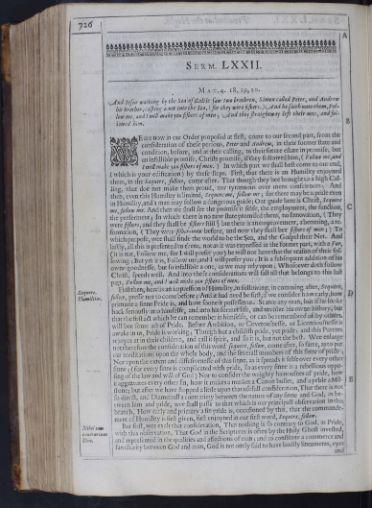 726
726
Serm. LXXII.
Mat. 4. 18, 19, 20.
And Iesus walking by the Sea of Galile saw two brethren, Simon called Peter, and Andrew
his brother, casting a net into the Sea, (for they were fishers.) And he saith unto them, Fol-
low me, and I will make you fishers of men; And they straightway left their nets, and fol-
lowed him.
WEWe are now in our Order proposed at first, come to our second part, from the
consideration of these persons, Peter and Andrew, in their former state and
condition, before, and at their calling, to their future estate in promise, but
an infallible promise, Christs promise, if they followed him, (Follow me, and
I will make you fishers of men.) In which part we shall best come to our end,
(which is your edification) by these steps. First, that there is an Humility enjoyned
them, in the Sequere, follow, come after. That though they bee brought to a high Cal-
ling, that doe not make them proud, nor tyrannous over mens consciences; And
then, even this Humility is limited, Sequere me, follow me; for there may be a pride even
in Humility, and a man may follow a dangerous guide; Our guide here is Christ, Sequere
me, follow me. And then we shall see the promise it selfe, the employment, the function,
the preferment; In which there is no new state promised them, no Innovation, (They
were fishers, and they shall be fishers still) but there is an emprovement, a bettering, a re-
formation, (They were fisher-men before, and now they shall bee fishers of men;) To
which purpose, wee shall finde the world to be the Sea, and the Gospel their Net. And
lastly, all this is presented to them, not as it was expressed in the former part, with a For,
(it is not, Follow me, for I will prefer you) he will not have that the reason of their fol-
lowing; But yet it is, Follow me, and I will prefer you; It is a subsequent addition of his
owne goodnesse, but so infallible a one, as we may rely upon; Whosoever doth follow
Christ, speeds well. And into these considerations will fall all that belongs to this last
part, Follow me, and I will make you fishers of men.
First then, Sequere. here is an impression of Humility, in following, in comming after, Sequere,
follow, presse not to come before; And it had need be first, if we consider how early, how Humilitas.
primarie a sinne Pride is, and how soone it possesses us. Scarce any man, but if he looke
back seriously into himselfe, and into his former life, and revolve his owne history, but
that the first act which he can remember in himselfe, or can be remembred of by others,
will bee some act of Pride. Before Ambition, or Covetousnesse, or Licentiousnesse is
awake in us, Pride is working; Though but a childish pride, yet pride; and this Parents
rejoyce at in their children, and call it spirit, and so it is, but not the best. Wee enlarge
not therefore the consideration of this word sequere, follow, come after, so farre, as to put
our meditation upon the whole body, and the severall members of this sinne of pride;
Nor upon the extent and diffusivenesse of this sinne, as it spreads it selfe over every other
sinne; (for every sinne is complicated with pride, so as every sinne is a rebellious oppo-
sing of the law and will of God) Nor to consider the waighty hainousnes of pride, how
it aggravates every other sin, how it makes a musket a Canon bullet, and a peble a Mil-
stone; but after we have stopped a little upon that usefull consideration, That there is not
so direct, and Diametrall a contrariety between the nature of any sinne and God, as be-
tween him and pride, wee shall passe to that which is our principall observation in this
branch, How early and primary a sin pride is, occasioned by this, that the commande-
ment of Humility is first given, first enjoyned in our first word, Sequere, follow.
But first, Nihil tam
centrarium
Deo. wee exalt that consideration, That nothing is so contrary to God, as Pride,
with this observation, That God in the Scriptures is often by the Holy Ghost invested,
and represented in the qualities and affections of man; and to constitute a commerce and
familiarity between God and man, God is not onely said to have bodily lineaments, eyes and
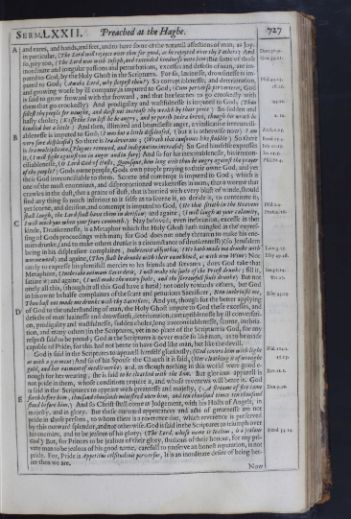 Serm. LXXII.
Preached at the Haghe.
727
and eares, and hands, and feet, and to have some of the naturall affections of man, as Joy,
Serm. LXXII.
Preached at the Haghe.
727
and eares, and hands, and feet, and to have some of the naturall affections of man, as Joy,
in particular, Deut. 30.9. (The Lord will rejoyce over thee for good, as he rejoyced over thy Fathers) And
so, pity too, Gen. 39.21. (The Lord was with Ioseph, and extended kindnesse unto him) But some of those
inordinate and irregular passions and perturbations, excesses and defects of man, are im-
puted to God, by the Holy Ghost in the Scriptures. For so, lazinesse, drowsinesse is im-
puted to God; (Awake Lord, why sleepest thou?) So corruptiblenesse, and deterioration, Psal. 44.23.
and growing worse by ill company, is imputed to God; (Cum perverso perverteris, God Psal. 18.26.
is said to grow froward with the froward, and that hee learnes to go crookedly with
them that go crookedly) And prodigality and wastfulnesse is imputed to God;Psal. 44.12. (Thou
sellest thy people for naught, and doest not increase thy wealth by their price) So sudden and
hasty choler; (Kisse the Son lest he be angry, and ye perish Inira brevi,Psal. 2.12. though his wrath be
kindled but a little) And then, illimited and boundlesse anger, a vindicative irreconcili-
ablenesse is imputed to God; (I was but a little displeased,Zech. 1.15. (but it is otherwise now) I am
very sore displeased) So there is Ira devorans;Exod. 15.4. (Wrath that consumes like stubble) So there
is Ira multiplicata, (Plagues renewed, and indignation increased) So God himselfe expresses Iob 10.17.
it, (I will fight against you in anger and in fury) And so for his inexorablenesse, Ier. 21.5.his irrecon -
ciliablenesse, (O Lord God of Hosts, Quousque, how long wilt thou be angry against the prayer Psal. 80.4.
of thy people?) Gods owne people, Gods own people praying to their owne God, and yet
their God irreconciliable to them. Scorne and contempt is imputed to God; which is
one of the most enormious, and disproportioned weakenesses in man; that a worme that
crawles in the dust, that a graine of dust, that is hurried with every blast of winde, should
find any thing so much inferiour to it selfe as to scorne it, to deride it, to contemne it;
yet scorne, and derision, and contempt is imputed to God, Psal. 2.4. (He that sitteth in the Heavens
shall laugh, the Lord shall have them in derision) and againe, Prov. 1.26.(I will laugh at your calamity,
I will mock you when your feare commeth.) Nay beloved, even inebriation, excesse in that
kinde, Drunkennesse, is a Metaphor which the Holy Ghost hath mingled in the expres-
sing of Gods proceedings with man; for God does not onely threaten to make his ene-
mies drunke, (and to make others drunke is a circumstance of drunkennesse)(so Jerusalem
being in his displeasure complaines, Inebriavit absynthio,Lam. 3.15. (He hath made me drunke with
wormewood) and againe, Esay 49.26.(They shall be drunke with their owne blood, as with new Wine) Nor
onely to expresse his plentifull mercies to his friends and servants, does God take that
Metaphore, (Inebriabo animam Sacerdotis, I will make the soule of the Priest drunke; fill it, Ier. 31.14.
satiate it) and againe, (I will make the weary soule, and the sorrowfull soule drunke) But not Ver. 25.
onely all this, (though in all this God have a hand) not onely towards others, but God
in his owne behalfe complaines of the scant and penurious Sacrificer, Non inebriasti me, Esay 43.24.
Thou hast not made me drunke with thy Sacrifices. And yet, though for the better applying
of God to the understanding of man, the Holy Ghost impute to God these excesses, and
defects of man (lazinesse and drowsiness, deterioration, corruptiblenesse by ill conversati-
on, prodigality and wastfulnesse, sudden choler, long irreconciablenesse, scorne, inebria-
tion, and many others) in the Scriptures, yet in no place of the Scripture is God, for any
respect said to be proud; God in the Scriptures is never made so like man, as to be made
capable of Pride; for this had not beene to have God like man, but like the devill.
God is said in the Scriptures to apparell himself gloriously;Psal. 104.2. (God covers him with light
as with a garment) Psal. 45.13.And so of his Spouse the Church it is said, (Her cloathing is of wrought
gold, and her raiment of needle worke) and, as though nothing in this world were good e-
nough for her wearing, she is said to be cloathed with the Sun.Rev. 12.1. But glorious apparell is
not pride in them, whose conditions require it, and whose revenews will beare it. God
is said in the Scriptures to appeare with greatnesse and majesty, Dan. 7.10. (A streame of fire came
forth before him; thousand thousands ministred unto him, and ten thousand times ten thousand
stood before him.) And so Christ shall come at Judgement, with his Hosts of Angels, in
majesty, and in glory. But these outward appearances and acts of greatnesse are not
pride in those persons, to whom there is a reverence due, which reverence is preserved
by this outward splendor, and not otherwise. God is said in the Scriptures to triumph over
his enemies, and to be jealous of his glory; (The Lord, whose name is Iealous,Exod. 34.14. is a jealous
God) But, for Princes to be jealous of their glory, studious of their honour, for any pri-
vate man to be jealous of his good name, carefull to preserve an honest reputation, is not
pride. For, Pride is Appetitus celsitudinis perversus, It is an inordinate desire of being bet-
ter then we are. Now
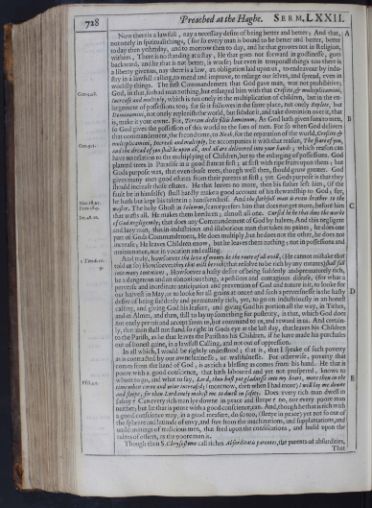 728
Preached at the Haghe.
Serm. LXXI.
728
Preached at the Haghe.
Serm. LXXI.
Now there is a lawfull, nay a necessary desire of being better and better; And that,
not onely in spirituall things, (for so every man is bound to be better and better, better
to day then yesterday, and to morrow then to day, and he that growes not in Religion,
withers, There is no standing at a stay, He that goes not forward in godlinesse, goes
backward, and he that is not better, is worse) but even in temporall things too there is
a liberty given us, nay there is a law, an obligation laid upon us, to endeavour by indu-
stry in a lawfull calling, to mend and improve, to enlarge our selves, and spread, even in
worldly things. The first Commandement that God gave man, was not prohibitive;
God, Gen. 1.28. in that, forbad man nothing, but enlarged him with that Crescite, & multiplicamini,
Increase and multiply, which is not onely in the multiplication of children, but in the en-
largement of possessions too; for so it followes in the same place, not onely Replete, but
Dominamini, not onely replenish the world, but subdue it, and take dominion over it, that
is, make it your owne. For, Terram dedit filiis hominum, As God hath given sons to men,
so God gives the possession of this world to the sons of men. For so when God delivers
that commandement, the second time, to Noah, for the reparation of the world, Crescite &
multiplicamini,Gen. 9.1. Increase and multiply, he accompanies it with that reason, The feare of you,
and the dread of you shall be upon all, and all are delivered into your hands; which reason can
have no relation to the multiplying of Children, but to the enlarging of possessions. God
planted trees in Paradise in a good state at first; at first with ripe fruits upon them; but
Gods purpose was, that even those trees, though well then, should grow greater. God
gives many men good estates from their parents at first; yet Gods purpose is that they
should increase those estates. He that leaves no more, then his father left him, (if the
fault be in himselfe) shall hardly make a good account of his stewardship to God; for,
he hath but kept his talent in a handkercheif.Mat. 18.25. And the slothfull man is even brother to the
waster. The holy Ghost in Solomon, scarce prefers him that does not get more, before him Prov. 18.9.
that wasts all.Ier. 48.10. He makes them brethren; almost all one. Cursed be he that does the worke
of God negligently; that does any Commandement of God by halves; And this negligent
and lazy man, this in-industrious and illaborious man that takes no paines, he does one
part of Gods Commandement, He does multiply, but he does not the other, he does not
increase; He leaves Children enow, but he leaves them nothing; not in possessions and
maintenance, nor in vocation and calling.
And truly, 1 Tim. 6.10. howsoever the love of money be the roote of all evill, (He cannot mistake that
told us so) Howsoever they that will be rich (that resolve to be rich by any meanes) 1 Tim. 9. shall fall
into many tentations, Howsoever a hasty desire of being suddenly and prematurely rich,
be a dangerous and an obnoxious thing, a pestilent and contagious disease, (for what a
perverse and inordinate anticipation and prevention of God and nature is it, to looke for
our harvest in May, or to looke for all grainst at once? and such a perversnesse is the hasty
desire of being suddenly and prematurely rich, yet, to go on industriously in an honest
calling, and giving God his leasure, and giving God his portion all the way, in Tithes,
and in Almes, and then, still to lay up something for posterity, is that, which God does
not onely permit and accept from us, but command to us, and reward in us. And certain-
ly, that man shall not stand so right in Gods eye at the last day, that leaves his Children
to the Parish, as he that leaves the Parish to his Children, if he have made his purchases
out of honest gaine, in a lawfull Calling, and not out of oppression.
In all which, I would be rightly understood; that is, that I speake of such poverty
as is contracted by our owne lazinesse, or wastfulnesse. For otherwise, poverty that
comes from the hand of God, is as rich a blessing as comes from his hand. He that is
poore with a good conscience, that hath laboured and yet not prospered, knows to
whom to go, Psal. 4.7. and what to say, Lord, thou hast put gladnesse into my heart, more then in the
time when corne and wine increased; (more now, then when I had more) I will lay me downe
and sleepe, for thou Lord onely makest me to dwell in safety. Does every rich man dwell in
safety? Can every rich man lye downe in peace and sleepe? no, nor every poore man
neither; but he that is poore with a good conscience, can. And, though he that is rich with
a good conscience may, in a good measure, do so too, (sleepe in peace) yet not so out of
the spheare and latitude of envy, and free from the machinations, and supplantations, and
underminings of malicious men, that feed upon the confiscations, and build upon the
ruines of others, as the poore man is.
Though then S. Chrysostome call riches Absurditatis parentes, the parents of absurdities, That
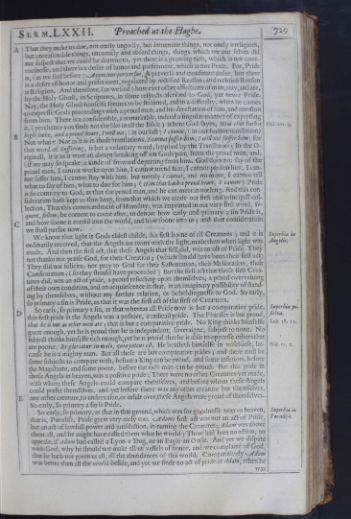 Serm. LXXII.
Preached at the Haghe.
729
That they make us doe, not onely ungodly, but inhumane things, not onely irreligious,
Serm. LXXII.
Preached at the Haghe.
729
That they make us doe, not onely ungodly, but inhumane things, not onely irreligious,
but unreasonable things, uncomely and absurd things, things which we our selves did
not suspect that we could be drawne to, yet there is a growing rich, which is not cove-
tousnesse, and there is a desire of honor and preferment, which is not Pride. For, Pride
is, (as we said before) Appetitus perversus, A perverse and inordinate desire, but there
is a defire of honor and preferment, regulated by rectified Reason; and rectified Reason
is Religion. And therefore, (as we said) how ever other affections of man, may, and are,
by the Holy Ghost, in Scriptures, in some respects ascribed to God, yet never Pride.
Nay, the Holy Ghost himselfe seemes to be straitned, and in a difficulty, when he comes
to expresse Gods proceedings with a proud man, and his detestation of him, and aversion
from him. There is a considerable, a remarkable, indeed a singular manner of expressing
it, (perchance you finde not the like in all the Bible) where God sayes, Psal. 101.5. Him that hath a
high looke, and a proud heart, I will not, (in our last) I cannot, (in our former translation)
Not what? Not as it is in those translations, I cannot suffer him, I will not suffer him; for
that word of Suffering, is but a voluntary word, supplied by the Translators; In the O-
riginall, it is as it were an abrupt breaking off on Gods part, from the proud man, and,
(if we may so speake) a kinde of froward departing from him. God does not say of the
proud man, I cannot worke upon him, I cannot mend him, I cannot pardon him, I can-
not suffer him, I cannot stay with him, but meerly I cannot, and no more, I cannot tell
what to say of him, what to doe for him; (Him that hath a proud heart, I cannot) Pride
is so contrary to God, as that the proud man, and he can meet in nothing. And this con-
sideration hath kept us thus long, from that which we made our first and principall col-
lection, That this commandment of Humility, was imprinted in our very first word, Se-
quere, follow, be content to come after, to denote how early and primary a sin Pride is,
and how soone it entred into the world, and how soone into us; and that consideration
we shall pursue now.
We know that light is Gods eldest childe, his first borne of all Creatures;Superbia in
Angelis. and it is
ordinarily received, that the Angels are twins with the light, made then when light was
made. And then the first act, that these Angels that fell, did, was an act of Pride. They
not thanke nor praise God; for their Creation; (which should have been their first act)
They did not solicite, nor pray to God for their Sustentation, their Melioration, their
Confirmation; (so they should have proceeded) But the first act that those first Crea-
tures did, was an act of pride, a proud reflecting upon themselves, a proud overvaluing
of their own condition, and an acquiescence in that, in an imaginary possibility of stand-
ing by themselves, without any farther relation, or beholdingnesse to God. So early,
so primary a sin is Pride, as that it was the first act of the first of Creatures.
So early, so primary a sin, as that whereas all Pride now is but a comparative pride, Superbia po-
sitiva.
this first pride in the Angels was a positive, a radicall pride. The Pharisee is but proud,
that he is not as other men are; that is but a comparative pride.Luk. 18.11. No King thinks himselfe
great enough, yet he is proud that he is independant, soveraigne, subject to none. No
subject thinks himselfe rich enough, yet he is proud that he is able to oppresse others that
are poorer, Et gloriatur in malo, quia potens est, He boasteth himselfe in mischiefe, Psal. 52.1. be-
cause he is a mighty man. But all these are but comparative prides; and there must be
some subjects to compare with, before a King can be proud, and some inferiors, before
the Magistrate, and some poore, before the rich man can be proud. But this pride in
those Angels in heaven, was a positive pride; There were no other Creatures yet made,
with whom these Angels could compare themselves, and before whom these Angels
could prefer themselves, and yet before there was any other creature but themselves,
any other creature, to undervalue, or insult over, these Angels were proud of themselves.
So early, so primary a sin is Pride.
So early, so primary, as that in that ground, which was for goodnesse next to heaven, Superbia in
Paradiso.
that is, Paradise, Pride grew very early too. Adams first act was not an act of Pride,
but an act of lawfull power and jurisdiction, in naming the Creatures; Adam was above
them all, and he might have called them what he would; There had lyen no action, no
appeale, if Adam had called a Lyon a Dog, or an Eagle an Owle. And yet we dispute
with God, why he should not make all us vessels of honor, and we complaine of God,
that he hath not given us all, all the abundances of this world. Comparatively Adam
was better then all the world beside, and yet we finde no act of pride in Adam, when he was
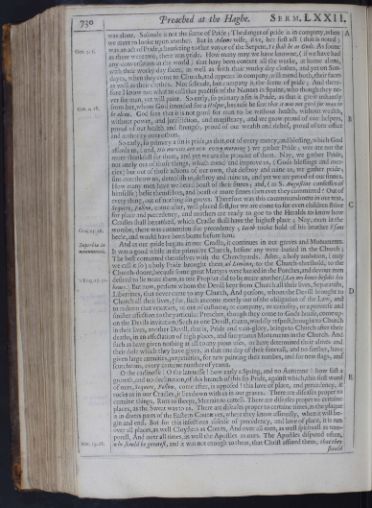 730
Preached at the Haghe.
Serm. LXXI.
was alone. Solitude is not the scene of Pride; The danger of pride is in company, when
730
Preached at the Haghe.
Serm. LXXI.
was alone. Solitude is not the scene of Pride; The danger of pride is in company, when
we meet to looke upon another. But in Adams wife, Eve, her first act (that is noted)
was an act of Pride, Gen. 3.5. a hearkning to that voyce of the Serpent, Ye shall be as Gods. As soone
as there were two, there was pride. How many may we have knowne, (if we have had
any conversation in the world) that have been content all the weeke, at home alone,
with their worky day faces, as well as with their worky day clothes, and yet on Sun-
dayes, when they come to Church, and appeare in company, will mend both, their faces
as well as their clothes. Not solitude, but company is the scene of pride; And there-
fore I know not what to call that practise of the Nunnes in Spaine, who though they ne-
ver see man, yet will paint. So early, so primary a sin is Pride, as that it grew instantly
from her, Gen. 2.18. whom God intended for a Helper, because he saw that it was not good for man to
be alone. God sees that it is not good for man to be without health, without wealth,
without power, and jurisdiction, and magistracy, and we grow proud of our helpers,
proud of our health and strength, proud of our wealth and riches, proud of our office
and authority over others.
So early, so primary a sin is pride, as that, out of every mercy, and blessing, which God
affords us, (and, His mercies are new every morning) we gather Pride; wee are not the
more thankfull for them, and yet we are the prouder of them. Nay, we gather Pride,
not onely out of those things, which mend and improve us, (Gods blessings and mer-
cies) but out of those actions of our own, that destroy and ruine us, we gather pride;
sins overthrow us, demolish us, destroy and ruine us, and yet we are proud of our sinnes.
How many men have we heard boast of their sinnes; and, (as S. Augustine confesses of
himselfe) belie themselves, and boast of more sinnes then ever they committed? Out of
every thing, out of nothing sin grows. Therefore was this commandment in our text,
Sequere, Follow, come after, well placed first, for we are come to see even children strive
for place and precedency, and mothers are ready to goe to the Heralds to know how
Cradles shall be ranked, which Cradle shall have the highest place; Nay, even in the
wombe, Gen. 25.26. there was contention for precedency; Iacob tooke hold of his brother Esaus
heele, and would have been borne before him.
And as our pride begins in our Cradle, Superbia in
monumentis. it continues in our graves and Monuments.
It was a good while in the primitive Church, before any were buried in the Church;
The best contented themselves with the Churchyards. After, a holy ambition, (may
we call it so) a holy Pride brought them ad Limina, to the Church-threshold, to the
Church-doore, because some great Martyrs were buried in the Porches, and devout men
desired to lie neare them, 1 King. 13.31. as one Prophet did to lie neare another, (Lay my bones besides his
bones.) But now, persons whom the Devill kept from Church all their lives, Separatists,
Libertines, that never came to any Church, And persons, whom the Devill brought to
Church all their lives, (for, such as come meerly out of the obligation of the Law, and
to redeem that vexation, or out of custome, or company, or curiosity, or a perverse and
sinister affection to the particular Preacher, though they come to Gods house, come up-
on the Devils invitation) Such as one Devill, that is, worldly respect, brought to Church
in their lives, another Devill, that is, Pride and vain-glory, brings to Church after their
deaths, in an affectation of high places, and sumptuous Monuments in the Church. And
such as have given nothing at all to any pious uses, or have determined their almes and
their dole which they have given, in that one day of their funerall, and no farther, have
given large annuities, perpetuities, for new painting their tombes, and for new flags, and
scutcheons, every certaine number of yeares.
O the earlinesse! O the latenesse! how early a Spring, and no Autumne! how fast a
growth, and no declination, of this branch of this sin Pride, against which, this first word
of ours, Sequere, Follow, come after, is opposed! this love of place, and precedency, it
rocks us in our Cradles, it lies down with us in our graves. There are diseases proper to
certaine things, Rots to sheepe, Murrain to cattell. There are diseases proper to certaine
places, as the Sweat was to us. There are diseases proper to certaine times, as the plague
is in divers parts of the Eastern Countryes, where they know assuredly, when it will be-
gin and end. But for this infectious disease of precedency, and love of place, it is run
over all places, as well Cloysters as Courts, And over all men, as well spirituall as tem-
porall, And over all times, as well the Apostles as ours. The Apostles disputed often,
who should be greatest,Mat. 19.28. and it was not enough to them, that Christ assured them, that they should
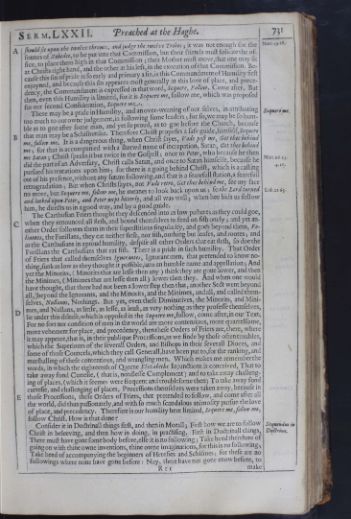 Serm. LXXII.
Preached at the Haghe.
731
should sit upon the twelve thrones, and judge the twelve Tribes;Matt. 19.28. it was not enough for the
Serm. LXXII.
Preached at the Haghe.
731
should sit upon the twelve thrones, and judge the twelve Tribes;Matt. 19.28. it was not enough for the
sonnes of Zebedee, to be put into that Commission, but their friends must solicite the of-
fice, to place them high in that Commission; their Mother must move, that one may sit
at Christs right hand, and the other at his left, in the execution of that Commission. Be-
cause this sin of pride is so early and primary a sin, is this Commandment of Humility first
enjoyned, and because this sin appeares most generally in this love of place, and prece-
dency, the Commandment is expressed in that word, Sequere, Follow, Come after. But
then, even this Humility is limited, for it is Sequere me, follow me, which was proposed
for our second Consideration, Sequere me.
There may be a pride in Humility, Sequere me. and an over-weaning of our selves, in attributing
too much to our owne judgement, in following some leaders; for so, we may be so hum-
ble as to goe after some man, and yet so proud, as to goe before the Church, because
that man may be a Schismatike. Therefore Christ proposes a safe guide, himself, Sequere
me, follow me. It is a dangerous thing, when Christ sayes, Vade post me, Get thee behind
me; for that is accompanied with a shrewd name of increpation, Satan, Get thee behind
me Satan; Christ speaks it but twice in the Gospell; once to Peter, who because he then
did the part of an Adversary, Christ calls Satan, and once to Satan himselfe, Matt. 16. 23. because he
pursued his tentations upon him; for there is a going behind Christ, which is a casting Matt. 4.10.
out of his presence, without any future following, and that is a fearefull station, a fearefull
retrogradation; But when Christs sayes, not Vade retro, Get thee behind me, see my face
no more, but Sequere me, follow me, he meanes to look back upon us;Luk. 22.63. so the Lord turned
and looked upon Peter, and Peter wept bitterly, and all was well; when hee bids us follow
him, he directs us in a good way, and by a good guide.
The Carthusian Friers thought they descended into as low pastures as they could goe,
when they renounced all flesh, and bound themselves to feed on fish onely; and yet an-
other Order followes them in their superstitious singularity, and goes beyond them, Fo-
liantes, the Fueillans, they eat neither flesh, nor fish, nothing but leafes, and rootes; and
as the Carthusians in a proud humility, despise all other Orders that eat flesh, so doe the
Fueillans the Carthusians that eat fish. There is a pride in such humility. That Order
of Friers that called themselves Ignorantes, Ignorant men, that pretended to know no-
thing, sunk as low as they thought it possible, into an humble name and appellation; And
yet the Minorits, (Minorits that are lesse then any) think they are gone lower, and then
the Minimes, (Minimes that are lesse then all) lower then they. And when one would
have thought, that there had not been a lower step then that, another Sect went beyond
all, beyond the Ignorants, and the Minorits, and the Minimes, and all, and called them-
selves, Nullanos, Nothings. But yet, even these Diminutives, the Minorits, and Mini-
mes, and Nullans, as little, as lesse, as least, as very nothing as they professe themselves,
lie under this disease, which is opposed in the Sequere me, follow, come after, in our Text;
For no sort nor condition of men in the world are more contentious, more quarrelsome,
more vehement for place, and precedency, then these Orders of Friers are, there, where
it may appeare, that is, in their publique Processions, as we finde by those often troubles,
which the Superiours of the severall Orders, and Bishops in their severall Dioces, and
some of those Councels, which they call Generall, have been put to, for the ranking, and
marshalling of these contentious, and wrangling men. Which makes me remember the
words, in which the eighteenth of Queene Elizabeths Injunctions is conceived, That to
take away fond Curtesie, (that is, needlesse Complement) and to take away challeng-
ing of places, (which it seemes were frequent and troublesome then) To take away fond
curtesie, and challenging of places, Processions themselves were taken away, because in
those Processions, these Orders of Friers, that pretended to follow, and come after all
the world, did thus passionately, and with so much scandalous animosity pursue the love
of place, and precedency. Therefore is our humility here limited, Sequere me, follow me,
follow Christ. How is that done?
Consider it in Doctrinall things first, and then in Morall;Sequendus in
Doctrina. First how we are to follow
Christ in beleeving, and then how in doing, in practising. First in Doctrinall things,
There must have gone some body before, else it is no following; Take heed therefore of
going on with thine owne inventions, thine owne imaginations, for this is no following;
Take heed of accompanying the beginners of Heresies and Schismes; for these are no
followings where none have gone before: Nay, there have not gone enow before, to Rrr make
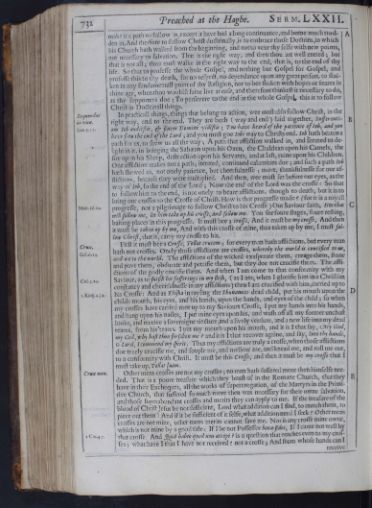 732
Preached at the Haghe.
Serm. LXXI.
make it a path to follow in, except it have had a long continuance, and beene much trod-
732
Preached at the Haghe.
Serm. LXXI.
make it a path to follow in, except it have had a long continuance, and beene much trod-den in. And therfore to follow Christ doctrinally, is to embrace those Doctrins, in which
his Church hath walked from the beginning, and not to vexe thy selfe with new points,
not necessary to salvation. That is the right way, and then thou art well entred; but
that is not all; thou must walke in the right way to the end, that is, to the end of thy
life. So that to professe the whole Gospel, and nothing but Gospel for Gospel, and
professe this to thy death, for no respect, no dependance upon any great person, to slac-
ken in any fundamentall point of thy Religion, nor to bee shaken with hopes or feares in
thine age, when thou wouldst faine live at ease, and therefore thinkest it necessary to do,
as thy supporters doe; To persevere to the end in the whole Gospel, this is to follow
Christ in Doctrinall things.
In practicall things, Sequendus
in vitæ. things that belong to action, wee must also follow Christ, in the
right way, and to the end. They are both (way and end) laid together, Sufferenti-
am Iob audiistis, & finem Domini vidistis; You have heard of the patience of Iob, and you Iam. 5.11.
bavehave seen the end of the Lord; and you must goe Iobs way to Christs end. Iob hath beaten a
path for us, to shew us all the way; A path that affliction walked in, and seemed to de-
light in it, in bringing the Sabæan upon his Oxen, the Chaldean upon his Camels, the
fire upon his Sheep, destruction upon his Servants, and at last, ruine upon his Children.
One affliction makes not a path; iterated, continued calamities doe; and such a path Iob
hath shewed us, not onely patience, but cheerfulnesse; more, thankfulnesse for our af-
flictions, because they were multiplied. And then, wee must set before our eyes, as the
way of Iob, so the end of the Lord; Now the end of the Lord was the crosse: So that
to follow him to the end, is not onely to beare afflictions, though to death, but it is to
bring our crosses to the Crosse of Christ. How is that progresse made? (for it is a royall
progresse, Matt. 16.24. not a pilgrimage to follow Christ to his Crosse) Our Saviour saith, Hee that
will follow me, let him take up his crosse, and follow me. You see foure stages, foure resting,
baiting places in this progresse. It must bee a crosse, And it must be my crosse, And then
it must be taken up by me, And with this crosse of mine, thus taken up by me, I must fol-
low Christ, that is, carry my crosse to his.
First it must bee a Crosse,Crux. Tollat crucem; for every man hath afflictions, but every man
hath not crosse. Onely those afflictions are crosses, Gal. 6.14. whereby the world is crucified to us,
and we to the world. The afflictions of the wicked exasperate them, enrage them, stone
and pave them, obdurate and petrifie them, but they doe not crucifie them. The affli-
ctions of the godly crucifie them. And when I am come to that conformity with my
Saviour, Col. 1.24. as to fulfill his sufferings in my flesh, (as I am, when I glorifie him in a Christian
constancy and cheerfulnesse in my afflictions) then I am crucified with him, carried up to
his Crosse:2 King. 4.34. And as Elisha in raysing the Shunamits dead child, put his mouth upon the
childs mouth, his eyes, and his hands, upon the hands, and eyes of the child; so when
my crosses have carried mee up to my Saviours Crosse, I put my hands into his hands,
and hang upon his nailes, I put mine eyes upon his, and wash off all my former unchast
looks, and receive a soveraigne tincture, and a lively verdure, and a new life into my dead
teares, from his teares. I put my mouth upon his mouth, and it is I that say, My God,
my God, why hast thou forsaken me? and it is I that recover againe, and say, Into thy hands,
O Lord, I commend my spirit. Thus my afflictions are truly a crosse, when those afflictions
doe truely crucifie me, and souple me, and mellow me, and knead me, and roll me out,
to a conformity with Christ. It must be this Crosse, and then it must be my crosse that I
must take up, Tollat suam.
Other mens crosses are not my crosses;Crux mea. no man hath suffered more then himselfe nee-
ded. That is a poore treasure which they boast of in the Romane Church, that they
have in their Exchequer, all the works of supererogation, of the Martyrs in the Primi-
tive Church, that suffered so much more then was necessary for their owne salvation,
and those superabundant crosses and merits they can apply to me. If the treasure of the
blood of Christ Jesus be not sufficient, Lord what addition can I find, to match them, to
piece out them! And if it be sufficient of it selfe, what addition need I seek? Other mens
crosses are not mine, other mens merits cannot save me. Nor is any crosse mine owne,
which is not mine by a good title; If I be not Possessor bonæ fidei, If I came not well by
that crosse.1 Cor. 4.7. And Quid habeo quod non accepi? is a question that reaches even to my cros-
ses; what have I that I have not received? not a crosse; And from whose hands can I receive
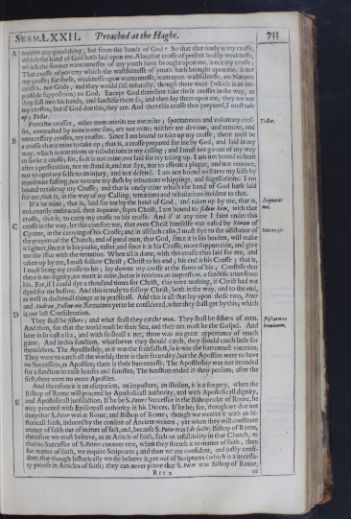 Serm. LXXII.
Preached at the Haghe.
733
receive any good thing, but from the hands of God? So that that onely is my crosse,
Serm. LXXII.
Preached at the Haghe.
733
receive any good thing, but from the hands of God? So that that onely is my crosse,
which the hand of God hath laid upon me. Alas, that crosse of present bodily weaknesse,
which the former wantonnesses of my youth have brought upon me, is not my crosse;
That crosse of poverty which the wastfulnesse of youth hath brought upon me, is not
my crosse; for these, weaknesse upon wantonnesse, want upon wastfulnesse, are Natures
crosses, not Gods, and they would fall naturally, though there were (which is an im-
possible supposition) no God. Except God therefore take these crosses in the way, as
they fall into his hands, and sanctifie them so, and then lay them upon me, they are not
my crosses; but if God doe this, they are. And then this crosse thus prepared, I must take
up; Tollat.
Forraine crosses, other mens merits are not mine; spontaneous and voluntary Tollat. cros-
ses, contracted by mine owne sins, are not mine; neither are devious, and remote, and
unnecessary crosses, my crosses. Since I am bound to take up my crosse, there must be
a crosse that is mine to take up; that is, a crosse prepared for me by God, and laid in my
way, which is tentations or tribulations in my calling; and I must not go out of my way
to seeke a crosse; for, so it is not mine, nor laid for my taking up. I am not bound to hunt
after a persecution, nor to stand it, and not flye, nor to affront a plague, and not remove,
nor to open my selfe to an injury, and not defend. I am not bound to starve my selfe by
inordinate fasting, nor to teare my flesh by inhumane whippings, and flagellations. I am
bound to take up my Crosse; and that is onely mine which the hand of God hath laid
for me, that is, in the way of my Calling, tentations and tribulations incident to that.
If it be mine, that is, laid for me by the hand of God, and taken up by me, that is, Sequatur
me.
voluntarily embraced, then Sequatur, sayes Christ, I am bound to follow him, with that
crosse, that is, to carry my crosse to his crosse. And if at any time I faint under this
crosse in the way, let this comfort me, that even Christ himselfe was eased by Simon of
Cyrene, in the carrying of his Crosse; and in all such cases, Mat. 27.32. I must flye to the assistance of
the prayers of the Church, and of good men, that God, since it is his burden, will make
it lighter, since it is his yoake, easier, and since it is his Crosse, more supportable, and give
me the issue with the tentation. When all is done, with this crosse thus laid for me, and
taken up by me, I must follow Christ; Christ to his end; his end is his Crosse; that is,
I must bring my crosse to his; lay downe my crosse at the foote of his; Confesse that
there is no dignity, no merit in mine, but as it receives an impression, a sanctification from
his. For, if I could dye a thousand times for Christ, this were nothing, if Christ had not
dyed for me before. And this is truly to follow Christ, both in the way, and to the end,
as well in doctrinall things as in practicall. And this is all that lay upon these two, Peter
and Andrew, Follow me. Remaines yet to be considered, what they shall get by this; which
is our last Consideration.
They shall be fishers; and what shall they catch? men. They shall be fishers of men. Piscatores
hominum.
And then, for that the world must be their Sea, and their net must be the Gospel. And
here in so vast a sea, and with so small a net, there was no great appearance of much
gaine. And in this function, whatsoever they should catch, they should catch little for
themselves. The Apostleship, as it was the fruitfullest, so it was the barrennest vocation;
They were to catch all the world; there is their fecundity; but the Apostles were to have
no Successors, as Apostles; there is their barrennesse. The Apostleship was not intended
for a function to raise houses and families; The function ended in their persons; after the
first, there were no more Apostles.
And therefore it is an usurpation, an imposture, an illusion, it is a forgery, when the
Bishop of Rome will proceed by Apostolicall authority, and with Apostolicall dignity,
and Apostolicall jurisdiction; If he be S. Peters Successor in the Bishopricke of Rome, he
may proceed with Episcopall authority in his Dioces. If he be; for, though we doe not
deny that S. Peter was at Rome, and Bishop of Rome; though we receive it with an hi-
storicall faith, induced by the consent of Ancient writers, yet when they will constitute
matter of faith out of matter of fact, and, because S. Peter was (de facto) Bishop of Rome,
therefore we must beleeve, as an Article of faith, such an infallibility in that Church, as
that no Successor of S. Peters can ever erre, when they stretch it to matter of faith, then
for matter of faith, we require Scriptures; and then we are confident, and justly confi-
dent, that though historically we do beleeve it, yet out of Scriptures (which is a necessa-
ry proofe in Articles of faith) they can never prove that S. Peter was Bishop of Rome, Rrr2 or
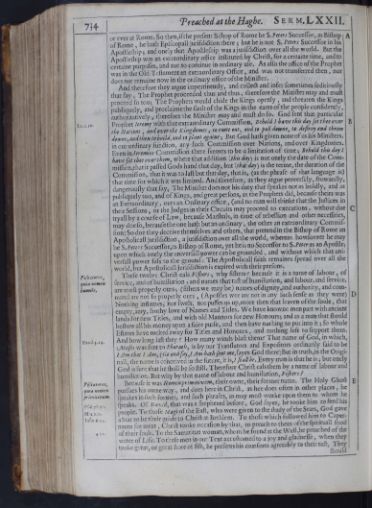 734
Preached at the Haghe.
Serm. LXXI.
or ever at Rome. So then, if the present Bishop of Rome be S. Peters Successor, as Bishop
734
Preached at the Haghe.
Serm. LXXI.
or ever at Rome. So then, if the present Bishop of Rome be S. Peters Successor, as Bishop
of Rome, he hath Episcopall jurisdiction there; but he is not S. Peters Successor in his
Apostleship; and onely that Apostleship was a jurisdiction over all the world. But the
Apostleship was an extraordinary office instituted by Christ, for a certaine time, and to
certaine purposes, and not to continue in ordinary use. As also the office of the Prophet
was in the Old Testament an extraordinary Office, and was not transferred then, nor
does not remaine now in the ordinary office of the Minister.
And therefore they argue impertinently, and collect and infer sometimes seditiously
that say, The Prophet proceeded thus and thus, therefore the Minister may and must
proceed so too; The Prophets would chide the Kings openly, and threaten the Kings
publiquely, and proclaime the fault of the Kings in the eares of the people confidently,
authoritatively, therefore the Minister may and must do so. God sent that particular
Prophet Ieremy with that extraordinary Commission, Ier. 1.10. Behold I have this day set thee over
the Nations, and over the Kingdomes, to roote out, and to pull downe, to destroy and throw
downe, and then to build, and to plant againe; But God hath given none of us his Ministers,
in our ordinary function, any such Commission over Nations, and over Kingdomes.
Even in Ieremies Commission there seemes to be a limitation of time; Behold this day I
have set thee over them, where that addition (this day) is not onely the date of the Com-
mission, that it passed Gods hand that day, but (this day) is the terme, the duration of the
Commission, that it was to last but that day, that is, (as the phrase of that language is)
that time for which it was limited. And therefore, as they argue perversely, frowardly,
dangerously that say, The Minister does not his duty that speakes not as boldly, and as
publiquely too, and of Kings, and great persons, as the Prophets did, because theirs was
an Extraordinary, ours an Ordinary office, (and no man will thinke that the Justices in
their Sessions, or the Judges in their Circuits may proceed to executions, without due
tryall by a course of Law, because Marshals, in time of rebellion and other necessities,
may doe so, because the one hath but an ordinary, the other an extraordinary Commis-
sion) So doe they deceive themselves and others, that pretend in the Bishop of Rome an
Apostolicall jurisdiction, a jurisdiction over all the world, whereas howsoever he may
be S. Peters Successor, as Bishop of Rome, yet he is no Successor to S. Peter as an Apostle;
upon which onely the universall power can be grounded, and without which that uni-
versall power fals to the ground: The Apostolicall faith remaines spread over all the
world, but Apostolicall jurisdiction is expired with their persons.
These twelve Christ cals Fishers;Piscatores,
quia nomen
humile. why fishers? because it is a name of labour, of
service, and of humiliation; and names that tast of humiliation, and labour, and service,
are most properly ours; (fishers we may be) names of dignity, and authority, and com-
mand are not so properly ours, (Apostles wee are not in any such sense as they were)
Nothing inflames, nor swels, nor puffes us up, more then that leaven of the soule, that
empty, aery, frothy love of Names and Titles. We have knowne men part with ancient
lands for new Titles, and with old Mannors for new Honours; and as a man that should
bestow all his money upon a faire purse, and then have nothing to put into it; so whole
Estates have melted away for Titles and Honours, and nothing left to support them.
And how long last they?Exod. 3.14. How many winds blast them? That name of God, in which,
Moses was sent to Pharaoh, is by our Translators and Expositors ordinarily said to be
I Am that I Am, (Go and say, I Am hath sent me, sayes God there) But in truth, in the Origi-
nall, the name is conceived in the future, it is, I shall be. Every man is that he is; but onely
God is sure that he shall be so still. Therefore Christ cals them by a name of labour and
humiliation. But why by that name of labour and humiliation, Fishers?
Because it was Nomen primitivum,Piscatores,
quia nomen
primitivum. their owne, their former name. The Holy Ghost
pursues his owne way, and does here in Christ, as hee does often in other places, he
speakes in such formes, and such phrases, as may most worke upon them to whom he
speaks.Psal. 78.70. Of David, that was a shepheard before, God sayes, he tooke him to feed his
people.Mat. 2.2. To those Magi of the East, who were given to the study of the Stars, God gave
a Star to be their guide to Christ at Bethlem.Iohn 6.24. To those which followed him to Caper-
naum for meat, Christ tooke occasion by that, to preach to them of the spirituall food
of their souls.Iohn 4.21. To the Samaritan woman, whom he found at the Well, he preached of the
water of Life. To these men in our Text accustomed to a joy and gladnesse, when they
tooke great, or great store of fish, he presents his comforts agreeably to their tast, They should
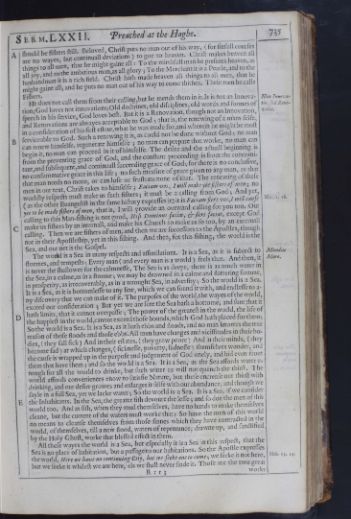 Serm. LXXII.
Preached at the Haghe.
735
should be fishers still. Beloved, Christ puts no man out of his way, (for sinfull courses
Serm. LXXII.
Preached at the Haghe.
735
should be fishers still. Beloved, Christ puts no man out of his way, (for sinfull courses
are no wayes, but continuall deviations) to goe to heaven. Christ makes heaven all
things to all men, that he might gaine all: To the mirthfull man he presents heaven, as
all joy, and to the ambitious man, as all glory; To the Merchant it is a Pearle, and to the
husbandman it is a rich field. Christ hath made heaven all things to all men, that he
might gaine all, and he puts no man out of his way to come thither. These men he calls
Fishers.
He does not call them from their calling, but he mends them in it. It is not an Innova-
tion;Non Innova-
tio, sed Reno-
vatio. God loves not innovations; Old doctrines, old disciplines, old words and formes of
speech in his service, God loves best. But it is a Renovation, though not an Innovation,
and Renovations are alwayes acceptable to God; that is, the renewing of a mans selfe,
in a consideration of his first estate, what he was made for, and wherein he might be most
serviceable to God. Such a renewing it is, as could not be done without God; no man
can renew himselfe, regenerate himselfe; no man can prepare that worke, no man can
begin it, no man can proceed in it of himselfe. The desire and the actuall beginning is
from the preventing grace of God, and the constant proceeding is from the concomi-
tant, and subsequent, and continuall succeeding grace of God; for there is no conclusive,
no consummative grace in this life; no such measure of grace given to any man, as that
that man needs no more, or can lose or frustrate none of that. The renewing of these
men in our text, Christ takes to himselfe; Faciam vos, I will make yee fishers of men; no
worldly respects must make us such fishers; it must be a calling from God; And yet,
Mar. 1.16. (as the other Euangelist in the same history expresses it) it is Faciam fieri vos, I will cause
yee to be made fishers of men, that is, I will provide an outward calling for you too. Our
calling to this Man-fishing is not good, Nisi Dominus faciat, & fieri faciat, except God
make us fishers by an internall, and make his Church to make us so too, by an externall
calling. Then we are fishers of men, and then we are successors to the Apostles, though
not in their Apostleship, yet in this fishing. And then, for this fishing, the world is the
Sea, and our net is the Gospel.
The world is a Sea in many respects and assimilations. It is a Sea, Mundus
Mare. as it is subject to
stormes, and tempests; Every man (and every man is a world) feels that. And then, it
is never the shallower for the calmnesse, The Sea is as deepe, there is as much water in
the Sea, in a calme, as in a storme; we may be drowned in a calme and flattering fortune,
in prosperity, as irrecoverably, as in a wrought Sea, in adversity; So the world is a Sea.
It is a Sea, as it is bottomlesse to any line, which we can sound it with, and endlesse to a-
ny discovery that we can make of it. The purposes of the world, the wayes of the world,
exceed our consideration; But yet we are sure the Sea hath a bottome, and sure that it
hath limits, that it cannot overpasse; The power of the greatest in the world, the life of
the happiest in the world, cannot exceed those bounds, which God hath placed for them;
So the world is a Sea. It is a Sea, as it hath ebbs and floods, and no man knowes the true
reason of those floods and those ebbs. All men have changes and vicissitudes in their bo-
dies, (they fall sick) And in their estates, (they grow poore) And in their minds, (they
become sad) at which changes, (sicknesse, poverty, sadnesse) themselves wonder, and
the cause is wrapped up in the purpose and judgement of God onely, and hid even from
them that have them; and so the world is a Sea. It is a Sea, as the Sea affords water e-
nough for all the world to drinke, but such water as will not quench the thirst. The
world affords conveniences enow to satisfie Nature, but these encrease our thirst with
drinking, and our desire growes and enlarges it selfe with our abundance, and though we
sayle in a full Sea, yet we lacke water; So the world is a Sea. It is a Sea, if we consider
the Inhabitants. In the Sea, the greater fish devoure the lesse; and so doe the men of this
world too. And as fish, when they mud themselves, have no hands to make themselves
cleane, but the current of the waters must worke that; So have the men of this world
no means to cleanse themselves from those sinnes which they have contracted in the
world, of themselves, till a new flood, waters of repentance, drawne up, and sanctified
by the Holy Ghost, worke that blessed effect in them.
All these wayes the world is a Sea, but especially it is a Sea in this respect, that the
Sea is no place of habitation, but a passage to our habitations. So the Apostle expresses
the world, Here we have no continuing City, but we seeke one to come; we seeke it not here, Heb. 13.14.
but we seeke it whilest we are here, els we shall never finde it. Those are the two great Rrr3 works
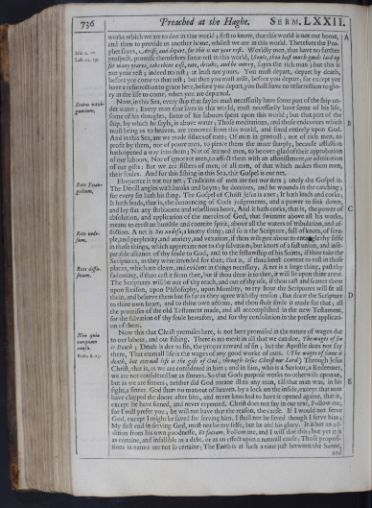 736
Preached at the Haghe.
Serm. LXXI.
works which we are to doe in this world; first to know, that this world is not our home,
736
Preached at the Haghe.
Serm. LXXI.
works which we are to doe in this world; first to know, that this world is not our home,
and then to provide us another home, whilest we are in this world. Therefore the Pro-
phet sayes, Mic. 2.10. Arise, and depart, for this is not your rest. Worldly men, that have no farther
prospect, promise themselves some rest in this world, Luk. 12.19. (Soule, thou hast much goods laid up
for many yeares, take thine ease, eate, drinke, and be merry, sayes the rich man) but this is
not your rest; indeed no rest; at least not yours. You must depart, depart by death,
before yee come to that rest; but then you must arise, before you depart; for except yee
have a resurrection to grace here, before you depart, you shall have no resurrection to glo-
ry in the life to come, when you are departed.
Now, Status navi-
gantium. in this Sea, every ship that sayles must necessarily have some part of the ship un-
der water; Every man that lives in this world, must necessarily have some of his life,
some of his thoughts, some of his labours spent upon this world; but that part of the
ship, by which he sayls, is above water; Those meditations, and those endevours which
must bring us to heaven, are removed from this world, and fixed entirely upon God.
And in this Sea, are we made fishers of men; Of men in generall; not of rich men, to
profit by them, nor of poore men, to pierce them the more sharply, because affliction
hath opened a way into them; Not of learned men, to be over-glad of their approbation
of our labours, Nor of ignorant men, to affect them with an astonishment, or admiration
of our gifts: But we are fishers of men, of all men, of that which makes them men,
their soules. And for this fishing in this Sea, this Gospel is our net.
Eloquence is not our net;Rete Euan-
gelium. Traditions of men are not our nets; onely the Gospel is.
The Devill angles with hooks and bayts; he deceives, and he wounds in the catching;
for every sin hath his sting. The Gospel of Christ Jesus is a net; It hath leads and corks;
It hath leads, that is, the denouncing of Gods judgements, and a power to sink down,
and lay flat any stubborne and rebellious heart, And it hath corks, that is, the power of
absolution, and application of the mercies of God, that swimme above all his works,
means to erect an humble and contrite spirit, above all the waters of tribulation, and af-
fliction. A net is Res nodosa,Rete nodo-
sum. a knotty thing; and so is the Scripture, full of knots, of scru-
ple, and perplexity, and anxiety, and vexation, if thou wilt goe about to entangle thy selfe
in those things, which appertaine not to thy salvation; but knots of a fast union, and inse-
parable alliance of thy soule to God, and to the fellowship of his Saints, if thou take the
Scriptures, as they were intended for thee, that is, if thou beest content to rest in those
places, Rete diffu-
sivum. which are cleare, and evident in things necessary. A net is a large thing, past thy
fadoming, if thou cast it from thee, but if thou draw it to thee, it will lie upon thine arme.
The Scriptures will be out of thy reach, and out of thy use, if thou cast and scatter them
upon Reason, upon Philosophy, upon Morality, to try how the Scriptures will fit all
them, and beleeve them but so far as they agree with thy reason; But draw the Scripture
to thine own heart, and to thine own actions, and thou shalt finde it made for that; all
the promises of the old Testament made, and all accomplished in the new Testament,
for the salvation of thy soule hereafter, and for thy consolation in the present applicati-
on of them.
Now this that Christ promises here, Non quia
tanquam
causa. is not here promised in the nature of wages due
to our labour, and our fishing. There is no merit in all that we can doe. The wages of sin
is Death; Death is due to sin, the proper reward of sin; but the Apostle does not say
there, That eternall life is the wages of any good worke of ours. Rom. 6.23.(The wages of sinne is
death, but eternall life is the gift of God, through Iesus Christ our Lord) Through Jesus
Christ, that is, as we are considered in him; and in him, who is a Saviour, a Redeemer,
we are not considered but as sinners. So that Gods purpose works no otherwise upon us,
but as we are sinners; neither did God meane ill to any man, till that man was, in his
sight, a sinner. God shuts no man out of heaven, by a lock on the inside, except that man
have clapped the doore after him, and never knocked to have it opened againe, that is,
except he have sinned, and never repented. Christ does not say in our text, Follow me,
for I will prefer you; he will not have that the reason, the cause. If I would not serve
God, except I might be saved for serving him, I shall not be saved though I serve him;
My first end in serving God, must not be my selfe, but he and his glory. It is but an ad-
dition from his own goodnesse, Et faciam, Follow me, and I will doe this; but yet it is
as certaine, and infallible as a debt, or as an effect upon a naturall cause; Those proposi-
tions in nature are not so certaine; The Earth is at such a time just between the Sunne, and
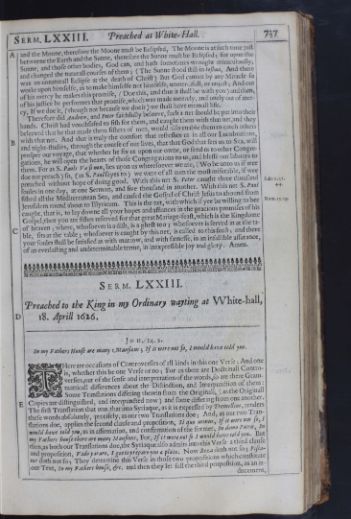 Serm. LXXII.
Preached at White-Hall.
737
and the Moone, therefore the Moone must be Eclipsed, The Moone is at such time just
Serm. LXXII.
Preached at White-Hall.
737
and the Moone, therefore the Moone must be Eclipsed, The Moone is at such time just
betweene the Earth and the Sunne, therefore the Sunne must be Eclipsed; for upon the
Sunne, and those other bodies, God can, and hath sometimes wrought miraculously,
and changed the naturall courses of them; (The Sunne stood still in Ioshua, And there
was an unnaturall Eclipse at the death of Christ) But God cannot by any Miracle so
worke upon himselfe, as to make himselfe not himselfe, unmercifull, or unjust; And out
of his mercy he makes this promise, (Doe this, and thus it shall be with you) and then,
of his justice he performes that promise, which was made meerely, and onely out of mer-
cy, If we doe it, (though not because we doe it) we shall have eternall life.
Therefore did Andrew, and Peter faithfully beleeve, such a net should be put into their
hands. Christ had vouchsafed to fish for them, and caught them with that net, and they
beleeved that he that made them fishers of men, would also enable them to catch others
with that net. And that is truly the comfort that refreshes us in all our Lucubrations,
and night-studies, through the course of our lives, that that God that sets us to Sea, will
prosper our voyage, that whether he fix us upon our owne, or send us to other Congre-
gations, he will open the hearts of those Congregations to us, and blesse our labours to
them. For as S. Pauls Væ si non, lies upon us wheresoever we are, (Wo be unto us if wee
doe not preach) so, (as S. Paul sayes to) we were of all men the most miserable, if wee
preached without hope of doing good. With this net S. Peter caught three thousand
soules in one day, at one Sermon, and five thousand in another.Acts 2.41. With this net S. Paul
fished all the Mediterranean Sea, and caused the Gospel of Christ Jesus to abound from Acts 4.4.
Jerusalem round about to Illyricum. This is the net, Rom. 15.19. with which if yee be willing to bee
caught, that is, to lay downe all your hopes and affiances in the gracious promises of his
Gospel, then you are fishes reserved for that great Mariage-feast, which is the Kingdome
of heaven; where, whosoever is a dish, is a ghest too; whosoever is served in at the ta-
ble, sits at the table; whosoever is caught by this net, is called to this feast; and there
your soules shall be satisfied as with marrow, and with fatnesse, in an infallible assurance,
of an everlasting and undeterminable terme, in inexpressible joy and glory. Amen.
Serm. LXXIII.
Preached to the King in my Ordinary wayting at VVhite-hallWhite-hall,
18. Aprill 1626.
Joh. 14.2.
In my Fathers House are many Mansions; If it were not so, I would have told you.
THereThere are occasions of Controversies of all kinds in this one Verse; And one
is, whether this be one Verse or no; For as there are Doctrinall Contro-
versies, out of the sense and interpretation of the words, so are there Gram-
matticall differences about the Distinction, and Interpunction of them:
Some Translations differing therein from the Originall, (as the Originall
Copies are distinguished, and interpuncted now) and some differing from one another.
The first Translation that was, that into Syriaque, as it is expressed by Tremellius, renders
these words absolutely, precisely, as our two Translations doe; And, as our two Tran-
slations doe, applies the second clause and proposition, Si quo minus, If it were not so, I
would have told you, as in affirmation, and confirmation of the former, In domo Patris, In
my Fathers house there are many Mansions, For, If it were not so I would have told you. But
then, as both our Translations doe, the Syriaque also admits into this Verse a third clause
and proposition, Vado parare, I goe to prepare you a place. Now Beza doth not so; Pisca-
tor doth not so; They determine this Verse in those two propositions which constitute
our Text, In my Fathers house, &c. and then they let fall the third proposition, as an in ducement
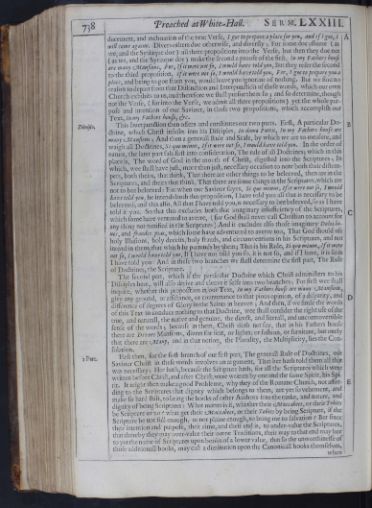 738
Preached at White-Hall.
Serm. LXXIII.
ducement, and inchoation of the next Verse, I goe to prepare a place for you, and if I goe, I
738
Preached at White-Hall.
Serm. LXXIII.
ducement, and inchoation of the next Verse, I goe to prepare a place for you, and if I goe, I
will come againe. Divers others doe otherwise, and diversly; For some doe assume (as
we, and the Syriaque doe) all three propositions into the Verse, but then they doe not
(as we, and the Syriaque doe) make the second a proofe of the first, In my Fathers house
are many Mansions, For, If it were not so, I would have told you, But they refer the second
to the third proposition, If it were not so, I would have told you, For, I goe to prepare you a
place, and being to goe from you, would leave you ignorant of nothing. But we find no
reason to depart from that Distinction and Interpunction of these words, which our own
Church exhibits to us, audand therefore we shall pursue them so; and so determine, though
not the Verse, (for into the Verse, we admit all three propositions) yet the whole pur-
pose and intention of our Saviour, in those two propositions, which accomplish our
Text, In my Fathers house, &c.
This Interpunction then offers and constitutes our two parts.Divisio. First, A particular Do-
ctrine, which Christ infuses into his Disciples, In domo Patris, In my Fathers house are
many Mansions; And then a generall Rule and Scale, by which we are to measure, and
waigh all Doctrines, Si quo minus, If it were not so, I would have told you. In the order of
nature, the later part fals first into consideration, The rule of all Doctrines; which in this
place is, The word of God in the mouth of Christ, digested into the Scriptures; In
which, wee shall have just, more then just, necessary occasion to note both their distem-
pers, both theirs, that think, That there are other things to be beleeved, then are in the
Scriptures, and theirs that think, That there are some things in the Scriptures, which are
not to bee beleeved: For when our Saviour sayes, Si quo minus, If it were not so, I would
have told you, he intends both this proposition, I have told you all that is necessary to be
beleeved; and this also, All that I have told you, is necessary to bee beleeved, so as I have
told it you. So that this excludes both that imaginary insufficiency of the Scriptures,
which some have ventured to averre, (for God shall never call Christian to account for
any thing not notified in the Scriptures) And it excludes also those imaginary Dolos bo-
nos, and fraudes pias, which some have adventured to averre too, That God should use
holy Illusions, holy deceits, holy frauds, and circumventions in his Scriptures, and not
intend in them, that which he pretends by them; This is his Rule, Si quo minus, If it were
not so, I would have told you, If I have not told you so, it is not so, and if I have, it is so as
I have told you: And in these two branches we shall determine the first part, The Rule
of Doctrines, the Scripture.
The second part, which is the particular Doctrine which Christ administers to his
Disciples here, will also derive and cleave it selfe into two branches; For first wee shall
inquire, whether this proposition in our Text, In my Fathers house are many Mansions,
give any ground, or assistance, or countenance to that pious opinion, of a disparity, and
difference of degrees of Glory in the Saints in heaven; And then, if we finde the words
of this Text to conduce nothing to that Doctrine, wee shall consider the right use of the
true, and naturall, the native and genuine, the direct, and literall, and uncontrovertible
sense of the words; because in them, Christ doth not say, that in his Fathers house
there are Divers Mansions, divers for seat, or lights, or fashion, or furniture, but onely
that there are Many, and in that notion, the Plurality, the MultipliciryMultiplicity, lies the Con-
solation.
First then, 1 Part. for the first branch of our first part, The generall Rule of Doctrines, our
Saviour Christ in these words involves an argument, That hee hath told them all that
was necessary; Hee hath, because the Scripture hath, for all the Scriptures which were
written before Christ, and after Christ, were written by one and the same Spirit, his Spi-
rit. It might then make a good Probleme, why they of the Romane Church, not affor-
ding to the Scriptures that dignity which belongs to them, are yet so vehement, and
make so hard shift, to bring the books of other Authors into the ranke, and nature, and
dignity of being Scriptures: What matter is it, whether their Maccabees, or their Tobies
be Scripture or no? what get their Maccabees, or their Tobies by being Scripture, if the
Scripture be not full enough, or not plaine enough, to bring me to salvation? But since
their intention and purpose, their aime, and their end is, to under-value the Scriptures,
that thereby they may over-value their owne Traditions, their way to that end may bee
to put the name of Scriptures upon books of a lower value, that so the unworthinesse of
those additionall books, may cast a diminution upon the Canonicall books themselves, when
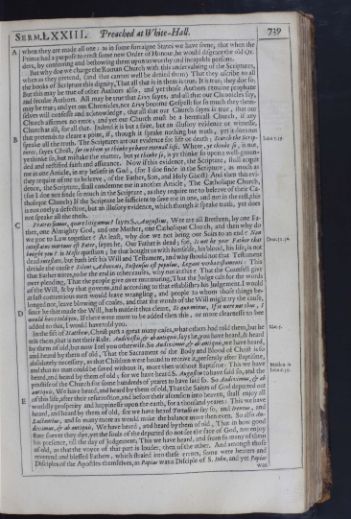 Serm. LXXIII.
Preached at White-Hall.
739
when they are made all one: as in some forraigne States we have seene, that when the
Serm. LXXIII.
Preached at White-Hall.
739
when they are made all one: as in some forraigne States we have seene, that when the
Prince had a purpose to erect some new Order of Honour, he would disgrace the old Or-
ders, by conferring and bestowing them upon unworthy and incapable persons.
But why doe we charge the Roman Church with this undervaluing of the Scriptures,
when as they pretend, (and that cannot well be denied them) That they ascribe to all
the books of Scripture this dignity, That all that is in them is true. It is true; they doe so;
But this may be true of other Authors also, and yet those Authors remaine prophane
and secular Authors. All may be true that Livy sayes, and all that our Chronicles say,
may be true; and yet our Chronicles, nor Livy become Gospell: for so much they them-
selves will confesse and acknowledge, that all that our Church sayes is true, that our
Church affirmes no error; and yet our Church must be a hereticall Church, if any
Church at all, for all that. Indeed it is but a faint, but an illusory evidence or witnesse,
that pretends to cleare a point, if, though it speake nothing but truth, yet it does not
speake all the truth. The Scriptures are our evidence for life or death;Iohn 5.39. Search the Scrip-
tures, sayes Christ, for in them ye thinke ye have eternall life. Where, ye thinke so, is not,
ye thinke so, but mistake the matter, but ye thinke so, is ye thinke so upon a well-groun-
ded and rectified faith and assurance. Now if this evidence, the Scripture, shall acquit
me in one Article, in my beliefe in God, (for I doe finde in the Scripture, as much as
they require of me to beleeve, of the Father, Son, and Holy Ghost) And then this evi-
dence, the Scripture, shall condemne me in another Article, The Catholique Church,
(for I doe not finde so much in the Scripture, as they require me to beleeve of their Ca-
tholique Church) If the Scripture be sufficient to save me in one, and not in the rest, this
is not onely a defective, but an illusory evidence, which though it speake truth, yet does
not speake all the truth.
Fratres sumus, quare litigamus? sayes S. Augustine, Wee are all Brethren, by one Fa-
ther, one Almighty God, and one Mother, one Catholique Church, and then why do
we goe to Law together? At least, why doe we not bring our Suits to an end? Non
intestatus mortuus est Pater, sayes he, Our Father is dead; for, Deut. 32.30. Is not he your Father that
bought you? is Moses question; he that bought us with himselfe, his blood, his life, is not
dead intestate, but hath left his Will and Testament, and why should not that Testament
decide the cause? Silent Advocati, Suspensus est populus, Legant verba testamenti: This
that Father notes, to be the end in other causes, why not in this? That the Counsell give
over pleading, That the people give over murmuring, That the Judge cals for the words
of the Will, & by that governs, and according to that establishes his Judgement. I would
at last contentious men would leave wrangling, and people to whom those things be-
longed not, leave blowing of coales, and that the words of the Will might try the cause,
since he that made the Will, hath made it thus cleare, Si quo minus, If it were not thus, I
would have told you, If there were more to be added then this, or more clearnesse to bee
added to this, I would have told you.
In the fift of Matthew, Christ puts a great many cases, what others had told them, Mat. 5. but he
tels them, that is not their Rule. Audivistis, & ab antiquis, says he, you have heard, & heard
by them of old, but now I tel you otherwise. So Audivimus, & ab antiquis, we have heard,
and heard by them of old, That the Sacrament of the Body and Blood of Christ is so
absolutely necessary, as that Children were bound to receive it, presently after Baptisme,
and that no man could be saved without it, more then without Baptisme:Maldon. in
Iohn 6.35. This we have
heard, and heard by them of old; for we have heard S. Augustin to have said so, and the
practise of the Church for some hundreds of yeares to have said so. So Audivimus, & ab
antiquis, We have heard, and heard by them of old, That the Saints of God departed out
of this life, after their resurrection, and before their ascension into heaven, shall enjoy all
worldly prosperity and happinesse upon the earth, for a thousand yeares: This we have
heard, and heard by them of old, for we have heard Tertullian say so, and Ireneus, and
Lactantius, and so many more as would make the balance more then even. So also Au-
divimus, & ab antiquis, We have heard, and heard by them of old, That in how good
state soever they dye, yet the souls of the departed do not see the face of God, nor enjoy
his presence, till the day of Judgement; This we have heard, and from so many of them
of old, as that the voyce of that part is louder, then of the other. And amongst those
reverend and blessed Fathers, which straied into these errors, some were hearers and
Disciples of the Apostles themselves, as Papias was a Disciple of S. Iohn, and yet Papias was
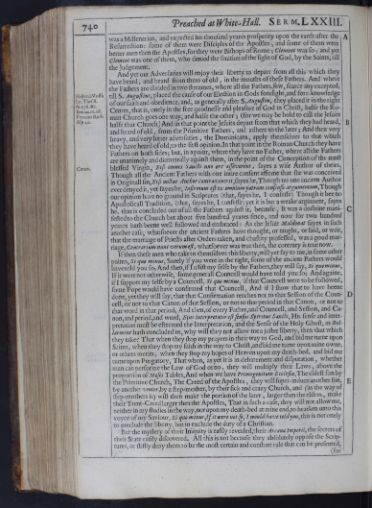 740
Preached at White-Hall.
Serm. LXXIII.
was a Millenarian, and expected his thousand yeares prosperity upon the earth after the
740
Preached at White-Hall.
Serm. LXXIII.
was a Millenarian, and expected his thousand yeares prosperity upon the earth after the
Resurrection: some of them were Disciples of the Apostles, and some of them were
better men then the Apostles, for they were Bishops of Rome; Clement was so; and yet
Clement was one of them, who denied the fruition of the sight of God, by the Saints, till
the Judgement.
And yet our Adversaries will enjoy their liberty to depart from all this which they
have heard, and heard from them of old, in the mouths of these Fathers. And where
the Fathers are divided in two streames, where all the Fathers, few, scarce any excepted,
till S. Augustine, Historia Vossii
l. 7. Thes. 8.
fo. 538. &c. placed the cause of our Election in Gods foresight, and fore-knowledge
of our faith and obedience, and, as generally after S. Augustin, they placed it in the right
Center, that is, onely in the free goodnesse and pleasure of God in Christ, halfe the Ro-
man Church goes one way, and halfe the other; (for we may be bold to call the Jesuits Benius ca. 26.
Pererius Ro. 8.
disp. 22.
halfe that Church) And in that point the Jesuits depart from that which they had heard,
and heard of old, from the Primitive Fathers, and adhere to the later; And their very
heavy, and very bitter adversaries, the Dominicans, apply themselves to that which
they have heard of old, to the first opinion. In that point in the Roman Church they have
Fathers on both sides; but, in a point, where they have no Father, where all the Fathers
are unanimely and diametrally against them, in the point of the Conception of the most
blessed Virgin, Canus. Etsi omnes Sancti uno ore asseverent, sayes a wise Author of theirs,
Though all the Ancient Fathers with one intire consent affirme that she was conceived
in Originall sin, Etsi nullus Author contravenerit, sayes he, Though no one ancient Author
ever denyed it, yet sayes he, Infirmum est ex omnium patrum consensu argumentum, Though
our opinion have no ground in Scriptures (that, sayes he, I confesse) Though it bee no
Apostolicall Tradition, (that, sayes he, I confesse) yet it is but a weake argument, sayes
he, that is concluded out of all the Fathers against it, because, It was a doctrine mani-
fested to the Church but about five hundred yeares since, and now for two hundred
yeares hath beene well followed and embraced: As the Jesuit Maldonat sayes in such
another case, whatsoever the ancient Fathers have thought, or taught, or said, or writ,
that the marriage of Priests after Orders taken, and chastity professed, was a good mar-
riage, Contrarium nunc verum est, whatsoever was true then, the contrary is true now.
If then these men who take to themselves this liberty, will yet say to me, in some other
points, Si quo minus, Surely if you were in the right, some of the ancient Fathers would
have told you so; And then, if I assist my selfe by the Fathers, they will say, Si quo minus,
If it were not otherwise, some generall Councell would have told you so; And againe,
if I support my selfe by a Councell, Si quo minus, if that Councell were to be followed,
some Pope would have confirmed that Councell, And if I show that to have beene
done, yet they will say, that that Confirmation reaches not to that Session of the Coun-
cell, or not to that Canon of that Session, or not to that period in that Canon, or not to
that word in that period; And then, of every Father, and Councell, and Session, and Ca-
non, and period, and word, Ejus interpretatio est sensus Spiritus Sancti, His sense and inter-
pretation must be esteemed the Interpretation, and the Sense of the Holy Ghost, as Bel-
larmine hath concluded us, why will they not allow me a juster liberty, then that which
they take? That when they stop my prayers in their way to God, and bid me turne upon
Saints, when they stop my faith in the way to Christ, and bid me turne upon mine owne,
or others merits, when they stop my hopes of Heaven upon my death-bed, and bid me
turne upon Purgatory, That when, as yet it is in debatement and disputation, whether
man can performe the Law of God or no, they will multiply their Laws, above the
proportion of Moses Tables, And when we have Primogenitum Ecclesiæ, The eldest son by
the Primitive Church, The Creed of the Apostles, they will super-induce another son,
by another venter, by a step-mother, by their sick and crazy Church, and (as the way of
step-mothers is) will then make the portion of the later, larger then the elders, make
their Trent-Creed larger then the Apostles, That in such a case, they will not allow me,
neither in my studies in the way, nor upon my death-bed at mine end, to hearken unto this
voyce of my Saviour, Si quo minus, If it were not so, I would have told you, this is not onely
to preclude the liberty, but to exclude the duty of a Christian.
But the mystery of their Iniquity is easily revealed, their Arcana Imperii, the secrets of
their State easily discovered. All this is not because they absolutely oppose the Scrip-
tures, or stiffly deny them to be the most certain and constant rule that can be presented, (for
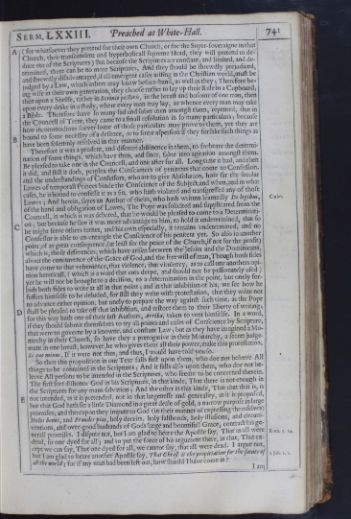 Serm. LXXIII.
Preached at White-Hall.
741
(for whatsoever they pretend for their own Church, or for the Super-soveraigne in that
Serm. LXXIII.
Preached at White-Hall.
741
(for whatsoever they pretend for their own Church, or for the Super-soveraigne in that
Church, their transcendent and hyperbolicall supreme Head, they will pretend to de-
duce out of the Scriptures) But because the Scriptures are constant, and limited, and de-
termined, there can be no more Scriptures, And they should be shrewdly prejudiced,
and shrewdly disadvantaged, if all emergent cases arising in the Christian world, must be
judged by a Law, which others may know before-hand, as well as they; Therefore be-
ing wise in their own generation, they choose rather to lay up their Rule in a Cupboard,
then upon a Shelfe, rather in Scrinio pectoris, in the breast and bosome of one man, then
upon every deske in a study, where every man may lay, or whence every man may take
a Bible. Therefore have so many sad and sober men amongst them, repented, that in
the Councell of Trent, they came to a finall resolution in so many particulars; because
how incommodious soever some of those particulars may prove to them, yet they are
bound to some necessity of a defence, or to some aspersion if they forsake such things as
have been solemnly resolved in that manner.
Therefore it was a prudent, and discreet abstinence in them, to forbeare the determi-
nation of some things, which have then, and since, falne into agitation amongst them.
Be pleased to take one in the Councell, and one after for all. Long time it had, and then
it did, and still it doth, perplex the Consciences of penitents that come to Confession,
and the understandings of Confessors, who are to give Absolution, how far the secular
Lawes of temporall Princes binde the Conscience of the Subject, and when, and in what
cases, he is bound to confesse it as a sin, who hath violated and transgressed any of those
Lawes; And herein, sayes an Author of theirs, who hath written learnedly De legibus, Carbo.
of the hand and obligation of Lawes, The Pope was solicited and supplicated from the
Councell, in which it was debated, that he would be pleased to come to a Determinati-
on; but because he saw it was more advantage to him, to hold it undetermined, that so
he might serve others turnes, and his own especially, it remains undetermined, and no
Confessor is able to un-entangle the Conscience of his penitent yet. So also in another
point, of as great consequence, (at least for the peace of the Church, if not for the profit)
which is, those differences, which have arisen between the Jesuits and the Dominicans,
about the concurrence of the Grace of God, and the free will of man, Though both sides
have come to that vehemence, that violence, that virulency, as to call one anothers opi-
nion hereticall, (which is a word that cuts deepe, and should not be passionately used)
yet he will not be brought to a decision, to a determination in the point, but onely for-
bids both sides to write at all in that point; and in that inhibition of his, we see how he
suffers himselfe to be deluded, for still they write with protestation, that they write not
to advance either opinion, but onely to prepare the way against such time, as the Pope
shall be pleased to take off that inhibition, and restore them to their liberty of writing;
for this way hath one of their last Authors, Arriba, taken to vent himselfe. In a word,
if they should submit themselves to try all points and cases of Conscience by Scripture,
that were to governe by a knowne, and constant Law; but as they have imagined a Mo-
narchy in their Church, so have they a prerogative in their Monarchy, a secret judge-
ment in one breast, however, he who gives them all their power, make this protestation,
Si quo minus, If it were not thus, and thus, I would have told you so.
So then this proposition in our Text falls first upon them, who doe not beleeve All
things to be contained in the Scriptures; And it falls also upon them, who doe not be-
leeve All persons to be intended in the Scriptures, who seeme to be concerned therein.
The first sort dishonor God in his Scriptures, in that kinde, That there is not enough in
the Scriptures for any mans salvation; And the other in this kinde, That that that is, is
not intended, as it is pretended, not in that largenesse and generality, as it is proposed,
but that God hath set a little Diamond in a great deale of gold, a narrow purpose in large
promises; and thereupon they impute to God (in their manner of expressing themselves)
Dolos bonos, and Fraudes pias, holy deceits, holy falshoods, holy illusions, and circum-
ventions, and over-good husbands of Gods large and bountifull Grace, contract his ge-
nerall promises. I dispute not, but I am glad to heare the Apostle say, Rom. 5.14. That as all were
dead, so one dyed for all; and to put the force of his argument there, in that, That ex-
cept we can say, That one dyed for all, we cannot say, that all were dead. I argue not,
but I am glad to heare another Apostle say, 1 Joh. 2.2. That Christ is the propitiation for the sinnes of
all the world; for if any man had been left out, how should I have come in? I am
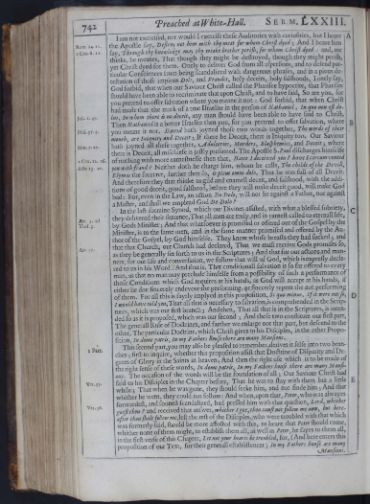 742
Preached at White-Hall.
Serm. LXXIII.
742
Preached at White-Hall.
Serm. LXXIII.
I am not exercised, nor would I exercise these Auditories with curiosities, but I heare
the Apostle say, Destroy not him with thy meat for whom Christ dyed; And I heare him Rom. 14.11.
say, Through thy knowledge may thy weake brother perish, for whom Christ dyed: and, me 1 Cor. 8.11.
thinks, he meanes, That though they might be destroyed, though they might perish,
yet Christ dyed for them. Onely to deliver God from all aspersions, and to defend par-
ticular Consciences from being scandalized with dangerous phrases, and in a pious de-
testation of those impious Doli, and Fraudes, holy deceits, holy falshoods, I onely say,
God forbid, that when our Saviour Christ called the Pharisee hypocrite, that Pharisee
should have been able to recriminate that upon Christ, and to have said, So are you, for
you pretend to offer salvation where you meane it not: God forbid, that when Christ
had made that the mark of a true Israelite in the person of Nathaniel, In quo non est do-
lus, In whom there is no deceit, Joh. 1.47. any man should have been able to have said to Christ,
Then Nathaniel is a better Israelite then you, for you pretend to offer salvation, where
you meane it not.Psal. 35.3. David hath joyned those two words together, The words of their
mouth, are Iniquity and Deceit; If there be Deceit, there is Iniquity too. Our Saviour
hath joyned all these together, Mar. 7.22. Adulteries, Murders, Blasphemies, and Deceit; where
there is Deceit, all mischiefe is justly presumed. The Apostle S. Paul discharges himselfe
of nothing with more earnestnesse then that, 2 Cor. 12.16. Have I deceived you? have I circumvented
you with fraud? Neither doth he charge him, whom he calls, The childe of the Devill, Acts 13.10.
Elymas the sorcerer, farther then so, O plene omni dolo, That he was full of all Deceit.
And therefore they that thinke to gild and enamell deceit, and falshood, with the addi-
tions of good deceit, good falshood, before they will make deceit good, will make God
bad: For, even in the Law, an action De Dolo, will not lie against a Father, nor against
a Master, and shall we emplead God De Dolo?
In the last forraine Synod, which our Divines assisted, with what a blessed sobriety,
they delivered their sentence, Art. 2. ad
Thes. 3. That all men are truly, and in earnest called to eternall life,
by Gods Minister; And that whatsoever is promised or offered out of the Gospel by the
Minister, is to the same men, and in the same manner promised and offered by the Au-
thor of the Gospel, by God himselfe. They knew whose breasts they had sucked; and
that that Church, Art. 17. our Church had declared, That we must receive Gods promises so,
as they be generally set forth to us in the Scriptures; And that for our actions and man-
ners, for our life and conversation, we follow that will of God, which is expresly decla-
red to us in his Word. And that is, That conditionall salvation is so far offered to every
man, as that no man may preclude himselfe from a possibility of such a performance of
those Conditions which God requires at his hands, as God will accept at his hands, if
either he doe sincerely endevour the performing, or sincerely repent the not performing
of them. For all this is fayrly implyed in this proposition, Si quo minus, If it were not so,
I would have told you; That all that is necessary to salvation, is comprehended in the Scrip-
tures, which was our first branch; And then, That all that is in the Scriptures, is inten-
ded so as it is proposed, which was our second; And these two constitute our first part,
The generall Rule of Doctrines, and farther we enlarge not that part, but descend to the
other, The particular Doctrine, which Christ gives to his Disciples, in the other Propo-
sition, In domo patris, In my Fathers house there are many Mansions.
This second part, 2 Part. you may also be pleased to remember, derives it selfe into two bran-
ches; first to inquire, whether this proposition assist that Doctrine of Disparity and De-
grees of Glory in the Saints in heaven; And then the right use which is to be made of
the right sense of these words, In domo patris, In my Fathers house there are many Mansi-
ons. The occasion of the words will be the foundation of all; Our Saviour Christ had
said to his Disciples in the Chapter before, Ver. 33. That he was to stay with them but a little
while; That when he was gone, they should seeke him, and not finde him; And that
whither he went, they could not follow: And when, upon that, Peter, who was alwayes
forwardest, Ver. 36. and soonest scandalized, had pressed him with that question, Lord, whither
goest thou? and received that answer, whither I goe, thou canst not follow me now, but here-
after thou shalt follow me, lest the rest of the Disciples, who were troubled with that which
was formerly said, should be more affected with this, to heare that Peter should come,
whither none of them might, to establish them all, as well as Peter, he sayes to them all,
in the first verse of this Chapter, Let not your hearts be troubled, for, (And here enters this
proposition of our Text, for their generall establishment) In my Fathers house are many Mansions.
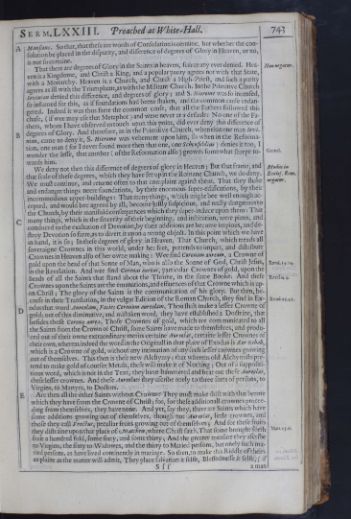 Serm. LXXIII.
Preached at White-Hall.
743
Mansions. So that, that these are words of Consolation is certaine, but whether the con-
Serm. LXXIII.
Preached at White-Hall.
743
Mansions. So that, that these are words of Consolation is certaine, but whether the con-solation be placed in the disparity, and difference of degrees of Glory in Heaven, or no,
is not so certaine.
That there are degrees of Glory in the Saints in heaven, scarce any ever denied.Non negatur. Hea-
ven is a Kingdome, and Christ a King, and a popular parity agrees not with that State,
with a Monarchy. Heaven is a Church, and Christ a High-Priest, and such a parity
agrees as ill with the Triumphant, as with the Militant Church. In the Primitive Church
Iovinian denied this difference, and degrees of glory; and S. Hierome was so incensed,
so inflamed for this, as if foundations had beene shaken, and the common cause endan-
gered. Indeed it was thus farre the common cause, that all the Fathers followed this
chase, (if wee may use that Metaphor) and were never at a default: No one of the Fa-
thers, whom I have observed to touch upon this point, did ever deny this difference of
degrees of Glory. And therefore, as in the Primitive Church, when that one man Iovi-
nian, came to deny it, S. Hierome was vehement upon him, so when in the Reforma-
tion, one man (for I never found more then that one, one Schoufeldius) denies it too, I
wonder the lesse, Gerard. that another (of the Reformation also) growes somewhat sharpe to-
wards him.
We deny not then this difference of degrees of glory in Heaven; But that frame, Modus in
Eccles. Rom.
negatur. and
that scale of these degrees, which they have set up in the Romane Church, we do deny.
We must continue, and returne often to that complaint against them, That they shake
and endanger things neere foundations, by their enormous super-edifications, by their
incommodious upper-buildings: That many things, which might bee well enough ac-
cepted, and would bee agreed by all, become justly suspicious, and really dangerous to
the Church, by their manifold consequences which they super-induce upon them: That
many things, which in the sincerity of their beginning, and institution, were pious, and
conduced to the exaltation of Devotion, by their additions are become impious, and de-
stroy Devotion so farre, as to divert it upon a wrong object. In this point which we have
in hand, it is so; In these degrees of glory in Heaven, That Church, which treads all
soveraigne Crownes in this world, under her feet, pretends to impart, and distribute
Crownes in Heaven also of her owne making: Wee find Coronam auream, a Crowne of
gold upon the head of that Sonne of Man, who is also the Sonne of God, Christ Jesus, Revel. 14.14.
in the Revelation. And wee find Coronas aureas, particular Crownes of gold, upon the
heads of all the Saints that stand about the Throne, in the same Booke. And these Revel. 4.4.
Crownes upon the Saints are the emanations, and effluences of that Crowne which is up-
on Christ; The glory of the Saints is the communication of his glory. But then, be-
cause in their Translation, in the vulgat Edition of the Roman Church, Exod. 25.25. they find in Ex-
odus that word Aureolam, Facies Coronam aureolam, Thou shalt make a lesser Crowne of
gold; out of this diminutive, and mistaken word, they have established a Doctrine, that
besides those Coronæ aureæ, Those Crownes of gold, which are communicated to all
the Saints from the Crown of Christ, some Saints have made to themselves, and produ-
ced out of their owne extraordinary merits certaine Aureolas, certaine lesser Crownes of
their own, whereas indeed the word in the Originall in that place of Exodus is Zer zehab,
which is a Crowne of gold, without any intimation of any such lesser crownes growing
out of themselves. This then is their new Alchymy; that whereas old Alchymists pre-
tend to make gold of courser Metals, these will make it of Nothing; Out of a suppositi-
tious word, which is not in the Text, they have hammered and beat out these Aureolas,
these lesser crownes. And these Aureolæs they ascribe onely to three sorts of persons, to
Virgins, to Martyrs, to Doctors.
Are then all the other Saints without Crowns? They must make shift with that beame
which they have from the Crowne of Christ; for, for these additionall crownes procee-
ding from themselves, they have none. And yet, say they, there are Saints which have
some additions growing out of themselves, though not Aureolas, little crownes, and
those they call Fructus, peculiar fruits growing out of themselves; And for these fruits
they distraine upon that place of Matthew, where Christ saith, Matt. 13.6. That some brought forth
fruit a hundred fold, some sixty, and some thirty; And the greater measure they ascribe
to Virgins, the sixty to Widowes, and the thirty to Maried persons, but onely such ma-
ried persons, as have lived continently in mariage. So then, to make this Riddle of theirs
as plaine as the matter will admit, They place salvation it selfe, Blessednesse it selfe, (if Sss a man
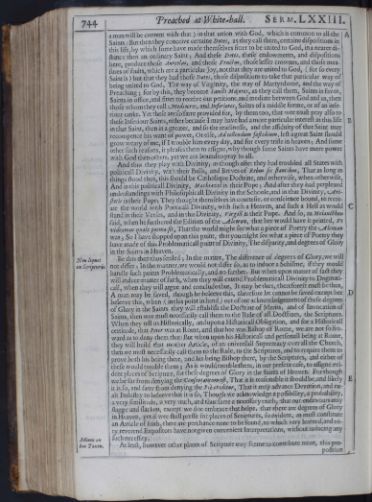 744
Preached at White-hall.
Serm. LXXIII.
a man will be content with that) in that union with God, which is common to all the
744
Preached at White-hall.
Serm. LXXIII.
a man will be content with that) in that union with God, which is common to all the
Saints: But then they conceive certaine Dotes, as they call them, certaine dispositions in
this life, by which some have made themselves fitter to be united to God, in a nearer di-
stance then an ordinary Saint; And these Dotes, these endowments, and dispositions
here, produce those Aureolas, and those Fructus, those lesser crownes, and those mea-
sures of fruits, which are a particular Joy, not that they are united to God, (for so every
Saint is) but that they had those Dotes, those dispositions to take that particular way of
being united to God, The way of Virginity, the way of Martyrdome, and the way of
Preaching; for by this, they become Sancti Majores, as they call them, Saints in favor,
Saints in office, and fitter to receive our petitions, and mediate between God and us, then
those whom they call Mediocres, and Inferiores, Saints of a middle forme, or of an infe-
riour ranke. Yet these are so farre provided for, by them too, that wee must pray also to
these Inferiour Saints, either because I may have had a more particular interest in this life
in that Saint, then in a greater, and so the readinesse, and the assiduity of that Saint may
recompence his want of power, Or else, Ad tollendum fastidium, lest a great Saint should
grow weary of me, if I trouble him every day, and for every trifle in heaven; And some
other such reasons, it pleases them to assigne, why though some Saints have more power
with God then others, yet we are bound to pray to all.
And thus they play with Divinity, as though after they had troubled all States with
politicall Divinity, with their Bulls, and Breves of Rebus sic stantibus, That as long as
things stood thus, this should be Catholique Doctrine, and otherwise, when otherwise,
And in this politicall Divinity, Machiavel is their Pope; And after they had perplexed
understandings with Philosophicall Divinity in the Schoole, and in that Divinity, Ari-
stotle is their Pope; They thought themselves in courtesie, or conscience bound, to recre-
ate the world with Poeticall Divinity, with such a Heaven, and such a Hell as would
stand in their Verses, and in this Divinity, Virgill is their Pope. And so, as Melancthon
said, when he furthered the Edition of the Alcoran, that hee would have it printed, Vt
videamus quale poema sit, That the world might see what a piece of Poetry the Alcoran
was; So I have stopped upon this point, that you might see what a piece of Poetry they
have made of this Problematicall point of Divinity, The disparity, and degrees of Glory
in the Saints in Heaven.
Be this then thus settled;Non liquet
ex Scripturis. In the matter, The difference of degrees of Glory, we will
not differ; In the manner, we would not differ so, as to induce a Schisme, if they would
handle such points Problematically, and no farther. But when upon matter of fact they
will induce matter of faith, when they will extend Problematicall Divinity to Dogmati-
call, when they will argue and conclude thus, It may be thus, therefore it must be thus,
A man may be saved, though he beleeve this, therefore he cannot be saved except hee
beleeve this, when (in this point in hand) out of our acknowledgement of these degrees
of Glory in the Saints they will establish the Doctrine of Merits, and of Invocation of
Saints, then wee must necessarily call them to the Rule of all Doctrines, the Scriptures.
When they tell us Historically, and upon a Historicall Obligation, and for a Historicall
certitude, that Peter was at Rome, and that hee was Bishop of Rome, we are not so fro-
ward as to deny them that: But when upon his Historicall and personall being at Rome,
they will build that mother Article, of an universall Supremacy over all the Church,
then we must necessarily call them to the Rule, to the Scriptures, and to require them to
prove both his being there, and his being Bishop there, by the Scriptures, and either of
these would trouble them; As it would trouble them, in our present case, to assigne evi-
dent places of Scripture, for these degrees of Glory in the Saints of Heaven. For though
we be far from denying the Consentaneum est, That it is reasonable it should be, and likely
it is so, and farre from denying the Piè creditur, That it may advance Devotion, and ex-
alt Industry to beleeve that it is so, Though we acknowledge a possibility, a probability,
a very similitude, a very truth, and thus farre a necessary truth, that our endevours may
flagge and slacken, except we doe embrace that helpe, that there are degrees of Glory
in Heaven, yet if wee shall presse for places of Scriptures, so evident, as must constitute
an Article of faith, there are perchance none to be found, to which very learned, and ve-
ry reverend Expositors have not given convenient Interpretations, without inducing any
such necessity.Minus ex
hoc Textu.
At least, however other places of Scripture may seeme to contribute more, this pro-
position
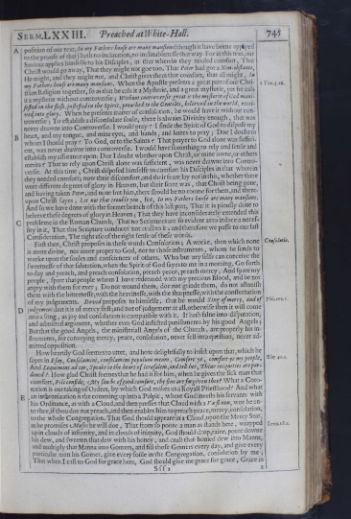 Serm. LXXIII.
Preached at White-Hall.
745
position of our text, In my Fathers house are many mansions (though it have beene applyed
Serm. LXXIII.
Preached at White-Hall.
745
position of our text, In my Fathers house are many mansions (though it have beene applyed
to the proofe of that) hath no inclination, no inclinablenesse that way. For in this text, our
Saviour applies himselfe to his Disciples, in that wherein they needed comfort, That
Christ would go away, That they might not goe too, That Peter had got a Non-obstante,
He might, and they might not, and Christ gives them that comfort, that all might, In
my Fathers house are many mansions.1 Tim. 3.16. When the Apostle presents a great part of our Chri-
stian Religion together, so as that he cals it a Mysterie, and a great mysterie, yet he cals
it a mysterie without controversie; Without controversie great is the mysterie of God mani-
fested in the flesh, justified in the Spirit, preached to the Gentiles, beleeved in the world, recei-
ved into glory. When he presents matter of consolation, he would have it without con-
troversie; To establish a disconsolate soule, there is alwaies Divinity enough, that was
never drawne into Controversie. I would pray? I finde the Spirit of God to dispose my
heart, and my tongue, and mine eyes, and hands, and knees to pray; Doe I doubt to
whom I should pray? To God, or to the Saints? That prayer to God alone was suffici-
ent, was never drawne into controversie. I would have something to rely and settle and
establish my assurance upon; Doe I doubt whether upon Christ, or mine owne, or others
merits? That to rely upon Christ alone was sufficient, was never drawne into Contro-
versie. At this time, Christ disposed himselfe to comfort his Disciples in that wherein
they needed comfort; now their discomfort, and their feare lay not in this, whether there
were different degrees of glory in Heaven, but their feare was, that Christ being gone,
and having taken Peter, and none but him, there should be no roome for them, and there-
upon Christ sayes, Let not that trouble you, for, In my Fathers house are many mansions.
And so we have done with the former branch of this last part, That it is piously done to
beleeve these degrees of glory in Heaven; That they have inconsiderately extended this
probleme in the Roman Church, That no Scriptures are so evident as to induce a neces-
sity in it, That this Scripture conduces not at all to it; and therefore we passe to our last
Consideration, The right use of the right sense of these words.
First then, Christ proposes in these words Consolation; A worke, Consolatio. then which none
is more divine, nor more proper to God, nor to those instruments, whom he sends to
worke upon the soules and consciences of others. Who but my selfe can conceive the
sweetnesse of that salutation, when the Spirit of God sayes to me in a morning, Go forth
to day and preach, and preach consolation, preach peace, preach mercy, And spare my
people, spare that people whom I have redeemed with my precious Blood, and be not
angry with them for ever; Do not wound them, doe not grinde them, do not astonish
them with the bitternesse, with the heavinesse, with the sharpnesse, with the consternation
of my judgements. David proposes to himselfe, that he would Sing of mercy,Psal. 101.1. and of
judgement; but it is of mercy first; and not of judgement at all, otherwise then it will come
into a song, as joy and consolation is compatible with it. It hath falne into disputation,
and admitted argument, whether ever God inflicted punishments by his good Angels;
But that the good Angels, the ministeriall Angels of the Church, are properly his in-
struments, for conveying mercy, peace, consolation, never fell into question, never ad-
mitted opposition.
How heartily God seemes to utter, and how delightfully to insist upon that, which he
sayes in Esay, Consolamini, consolamini populum meum, Comfort ye, comfort ye my people, Esay 40.1.
And Loquimini ad cor, Speake to the heart of Ierusalem, and tell her, Thine iniquities are par-
doned? How glad Christ seemes that he had it for him, when he gives the sick man that
comfort, Fili confide, My son be of good comfort, thy sins are forgiven thee? What a Coro-
nation is our taking of Orders, by which God makes us a Royall Priesthood? And what
an inthronization is the comming up into a Pulpit, where God invests his servants with
his Ordinance, as with a Cloud, and then presses that Cloud with a Væ si non, woe be un-
to thee, if thou doe not preach, and then enables him to preach peace, mercy, consolation,
to the whole Congregation. That God should appeare in a Cloud, upon the Mercy Seat,
as he promises Moses he will doe, That from so poore a man as stands here, Levit. 16.2. wrapped
up in clouds of infirmity, and in clouds of iniquity, God should drop, raine, poure downe
his dew, and sweeten that dew with his honey, and crust that honied dew into Manna,
and multiply that Manna into Gomers, and fill those Gomers every day, and give every
particular man his Gomer, give every soule in the Congregation, consolation by me;
That when I call to God for grace here, God should give me grace for grace, Grace in Sss2 a
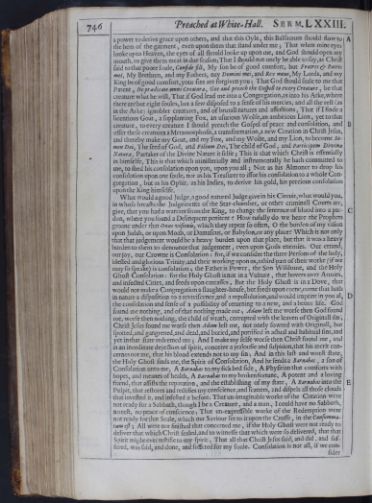 746
Preached at White-Hall.
Serm. LXXIII.
a power to derive grace upon others, and that this Oyle, this Balsamum should flow to
746
Preached at White-Hall.
Serm. LXXIII.
a power to derive grace upon others, and that this Oyle, this Balsamum should flow to
the hem of the garment, even upon them that stand under me; That when mine eyes
looke up to Heaven, the eyes of all should looke up upon me, and God should open my
mouth, to give them meat in due season; That I should not onely be able to say, as Christ
said to that poore soule, Confide fili, My son be of good comfort, but Fratres & Patres
mei, My Brethren, and my Fathers, nay Domini mei, and Rex meus, My Lords, and my
King be of good comfort, your sins are forgiven you; That God should seale to me that
Patent, Ite prædicate omni Creaturæ, Goe and preach the Gospell to every Creature, be that
creature what he will, That if God lead me into a Congregation, as into his Arke, where
there are but eight soules, but a few disposed to a sense of his mercies, and all the rest (as
in the Arke) ignobler creatures, and of brutall natures and affections, That if I finde a
licentious Goat, a supplanting Fox, an usurious Wolfe, an ambitious Lion, yet to that
creature, to every creature I should preach the Gospel of peace and consolation, and
offer these creatures a Metamorphosis, a transformation, a new Creation in Christ Jesus,
and thereby make my Goat, and my Fox, and my Wolfe, and my Lion, to become Se-
men Dei, The seed of God, and Filium Dei, The child of God, and Participem Divinæ
Naturæ, Partaker of the Divine Nature it selfe; This is that which Christ is essentially
in himselfe, This is that which ministerially and instrumentally he hath committed to
me, to shed his consolation upon you, upon you all; Not as his Almoner to drop his
consolation upon one soule, nor as his Treasurer to issue his consolation to a whole Con-
gregation, but as his Ophir, as his Indies, to derive his gold, his precious consolation
upon the King himselfe.
What would a good Judge, a good natured Judge give in his Circuit, what would you,
in whose breasts the Judgements of the Star-chamber, or other criminall Courts are,
give, that you had a warrant from the King, to change the sentence of blood into a par-
don, where you found a Delinquent penitent? How rufully do we heare the Prophets
groane under that Onus visionis, which they repeat so often, O the burden of my vision
upon Judah, or upon Moab, or Damascus, or Babylon, or any place? Which is not only
that that judgement would be a heavy burden upon that place, but that it was a heavy
burden to them to denounce that judgement, even upon Gods enemies. Our errand,
our joy, our Crowne is Consolation: for, if we consider the three Persons of the holy,
blessed and glorious Trinity, and their working upon us, a third part of their worke (if we
may so speake) is consolation; the Father is Power, the Son Wisdome, and the Holy
Ghost Consolation: for the Holy Ghost is not in a Vulture, that hovers over Armies,
and infected Cities, and feeds upon carcasses, But the Holy Ghost is in a Dove, that
would not make a Congregation a slaughter-house, but feeds upon corne, corne that hath
in nature a disposition to a reviviscence, and a repullulation, and would imprint in you alall,
the consolation and sense of a possibility of returning to a new, and a better life. God
found me nothing, and of that nothing made me; Adam left me worse then God found
me, worse then nothing, the child of wrath, corrupted with the leaven of Originall sin;
Christ Jesus found me worse then Adam left me, not onely sowred with Originall, but
spotted, and gangrened, and dead, and buried, and putrified in actual and habitual sins, and
yet in that state redeemed me; And I make my selfe worse then Christ found me, and
in an inordinate dejection of spirit, conceive a jealousie and suspition, that his merit con-
cernes not me, that his blood extends not to my sin; And in this last and worst state,
the Holy Ghost finds me, the Spirit of Consolation, And he sends a Barnabas, a son of
Consolation unto me, A Barnabas to my sick bed side, A Physitian that comforts with
hopes, and meanes of health, A Barnabas to my broken fortune, A potent and a loving
friend, that assists the reparation, and the establishing of my state, A Barnabas into the
Pulpit, that restores and rectifies my conscience, and scatters, and dispels all those clouds
that invested it, and infested it before. That un-imaginable worke of the Creation were
not ready for a Sabbath, though I be a Creature, and a man, I could have no Sabbath,
no rest, no peace of conscience; That un-expressible worke of the Redemption were
not ready for that Seale, which our Saviour set to it upon the Crosse, in the Consumma-
tum est; All were not finished that concerned me, if the Holy Ghost were not ready to
deliver that which Christ sealed, and to witnesse that which were so delivered, that that
Spirit might ever testifie to my spirit, That all that Christ Jesus said, and did, and suf-
fered, was said, and done, and suffered for my soule. Consolation is not all, if we con-
sider
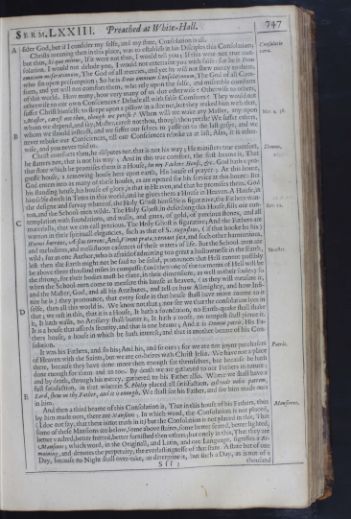 Serm. LXXIII.
Preached at White-Hall.
747
sider God, but if I consider my selfe, and my state, Consolation is all.
Serm. LXXIII.
Preached at White-Hall.
747
sider God, but if I consider my selfe, and my state, Consolation is all.
Christs meaning then in this place, was to establish in his Disciples this Consolation; Consolatio
vera.
but thus, Si quo minus, If it were not thus, I would tell you; If this were not true con-
solation, I would not delude you, I would not entertaine you with false: for he is Deus
omnium miserationum, The God of all mercies, and yet he will not shew mercy to them,
who sin upon presumption; So he is Deus omnium Consolationum, The God of all Com-
forts, and yet will not comfort them, who rely upon the false, and miserable comforts
of this world. How many, how very many of us doe otherwise? Otherwise to others,
otherwise to our own Consciences? Delude all with false Comforts? They would not
suffer Christ himselfe to sleepe upon a pillow in a storme, but they waked him with that,
Master, carest not thou, though we perish? When will we wake any Master, Mar. 4.38. any upon
whom we depend, and say, Master, carest not thou, though thou perish? We suffer others,
whom we should instruct, and we suffer our selves to passe on to the last gaspe, and we
never rebuke our Consciences, till our Consciences rebuke us at last, Alas, it is other-
wise, and you never told us.
Christ comforts then, he disputes not, that is not his way; He ministers true comfort, Domus.
he flatters not, that is not his way; And in this true comfort, the first beame is, That
that state which he promises them is a House, In my Fathers House, &c. God hath a pro-
gresse house, a removing house here upon earth, His house of prayer; At this houre,
God enters into as many of these houses, as are opened for his service at this houre: But
his standing house, his house of glory, is that in Heaven, and that he promises them. God
himselfe dwelt in Tents in this world, and he gives them a House in Heaven. A House, in
the designe and survay whereof, the Holy Ghost himselfe is figurative, the Fathers wan-
ton, and the School-men wilde. The Holy Ghost, in describing this House, Rev. 21. fills our con-
templation with foundations, and walls, and gates, of gold, of precious stones, and all
materialls, that we can call precious. The Holy Ghost is figurative; And the Fathers are
wanton in their spirituall elegancies, such as that of S. Augustins, (if that booke be his)
Hiems horrens, Æstas torrens, And, Virent prata, vernant sata, and such other harmonious,
and melodious, and mellifluous cadences of these waters of life. But the School-men are
wild; for as one Author, who is afraid of admitting too great a hollownesse in the Earth, Munster.
lest then the Earth might not be said to be solid, pronounces that Hell cannot possibly
be above three thousand miles in compasse, (and then one of the torments of Hell will be
the throng, for their bodies must be there, in their dimensions, as well as their soules) so
when the School-men come to measure this house in heaven, (as they will measure it,
and the Master, God, and all his Attributes, and tell us how Allmighty, and how Infi-
nite he is) they pronounce, that every soule in that house shall have more roome to it
selfe, then all this world is. We know not that; nor see we that the consolation lyes in
that; we rest in this, that it is a House, It hath a foundation, no Earth-quake shall shake
it, It hath walls, no Artillery shall batter it, It hath a roofe, no tempest shall pierce it.
It is a house that affords security, and that is one beame; And it is Domus patris, His Fa-
thers house, a house in which he hath interest, and that is another beame of his Con-
solation.
It was his Fathers, and so his; And his, and so ours;Patris. for we are not joynt purchasers
of Heaven with the Saints, but we are co-heires with Christ Jesus. We have not a place
there, because they have done more then enough for themselves, but because he hath
done enough for them and us too. By death we are gathered to our Fathers in nature;
and by death, through his mercy, gathered to his Father also. Where we shall have a
full satisfaction, in that wherein S. Philip placed all satisfaction, Ostende nobis patrem,
Lord, shew us thy Father, and it is enough. We shall see his Father, and see him made ours
in him.
And then a third beame of this Consolation is, That in this house of his Fathers, Mansiones. thus
by him made ours, there are Mansions; In which word, the Consolation is not placed,
(I doe not say, that there is not truth in it) but the Consolation is not placed in this, That
some of these Mansions are below, some above staires, some better seated, better lighted,
better vaulted, better fretted, better furnished then others; but onely in this, That they are
Mansions; which word, in the Originall, and Latin, and our Language, signifies a Re-
maining, and denotes the perpetuity, the everlastingnesse of that state. A state but of one
Day, because no Night shall over-take, or determine it, but such a Day, as is not of a Sss3 thousand
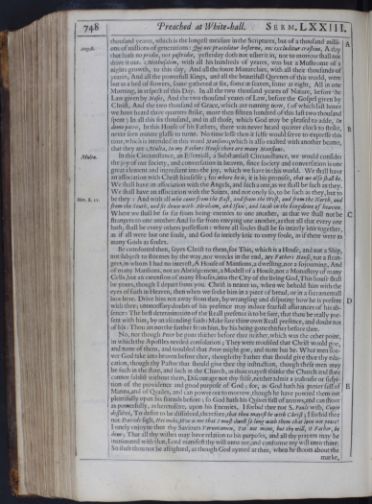 748
Preached at White-hall.
Serm. LXXIII.
thousand yeares, which is the longest measure in the Scriptures, but of a thousand milli-
748
Preached at White-hall.
Serm. LXXIII.
thousand yeares, which is the longest measure in the Scriptures, but of a thousand milli-ons of millions of generations:August. Qui nec præceditur hesterno, nec excluditur crastino, A day
that hath no pridie, nor postridie, yesterday doth not usher it in, nor to morrow shall not
drive it out. Methusalem, with all his hundreds of yeares, was but a Mushrome of a
nights growth, to this day, And all the foure Monarchies, with all their thousands of
yeares, And all the powerfull Kings, and all the beautifull Queenes of this world, were
but as a bed of flowers, some gathered at six, some at seaven, some at eight, All in one
Morning, in respect of this Day. In all the two thousand yeares of Nature, before the
Law given by Moses, And the two thousand yeares of Law, before the Gospel given by
Christ, And the two thousand of Grace, which are running now, (of which last houre
we have heard three quarters strike, more then fifteen hundred of this last two thousand
spent) In all this six thousand, and in all those, which God may be pleased to adde, In
domo patris, In this House of his Fathers, there was never heard quarter clock to strike,
never seen minute glasse to turne. No time lesse then it selfe would serve to expresse this
time, which is intended in this word Mansions; which is also exalted with another beame,
that they are Multa, In my Fathers House there are many Mansions.
In this Circumstance, Multa. an Essentiall, a Substantiall Circumstance, we would consider
the joy of our society, and conversation in heaven, since society and conversation is one
great element and ingredient into the joy, which we have in this world. We shall have
an association with Christ himselfe; for where he is, it is his promise, that we also shall be.
We shall have an association with the Angels, and such a one, as we shall be such as they.
We shall have an association with the Saints, and not onely so, to be such as they, but to
be they:Mat. 8.11. And with all who come from the East, and from the West, and from the North, and
from the South, and sit down with Abraham, and Isaac, and Iacob in the kingdome of heaven.
Where we shall be so far from being enemies to one another, as that we shall not be
strangers to one another: And so far from envying one another, as that all that every one
hath, shall be every others possession: where all soules shall be so intirely knit together,
as if all were but one soule, and God so intirely knit to every soule, as if there were as
many Gods as soules.
Be comforted then, sayes Christ to them, for This, which is a House, and not a Ship,
not subject to stormes by the way, nor wrecks in the end, My Fathers House, not a stran-
gers, in whom I had no interest, A House of Mansions, a dwelling, not a sojourning, And
of many Mansions not an Abridgement, a Modell of a House, not a Monastery of many
Cells, but an extension of many Houses, into the City of the living God, This house shall
be yours, though I depart from you. Christ is nearer us, when we behold him with the
eyes of faith in Heaven, then when we seeke him in a piece of bread, or in a sacramentall
box here. Drive him not away from thee, by wrangling and disputing how he is present
with thee; unnecessary doubts of his presence may induce fearfull assurances of his ab-
sence: The best determination of the Reall presence is to be sure, that thou be really pre-
sent with him, by an ascending faith: Make sure thine own Reall presence, and doubt not
of his: Thou art not the farther from him, by his being gone thither before thee.
No, nor though Peter be gone thither before thee neither, which was the other point,
in which the Apostles needed consolation; They were troubled that Christ would goe,
and none of them, and troubled that Peter might goe, and none but he. What men soe-
ver God take into heaven before thee, though thy Father that should give thee thy edu-
cation, though thy Pastor that should give thee thy instruction, though these men may
be such in the state, and such in the Church, as thou mayest thinke the Church and state
cannot subsist without them, Discourage not thy selfe, neither admit a jealousie or suspi-
tion of the providence and good purpose of God; for, as God hath his panier full of
Manna, and of Quailes, and can powre out to morrow, though he have powred them out
plentifully upon his friends before; so God hath his Quiver full of arrows, and can shoot
as powerfully, as heretofore, upon his Enemies. I forbid thee not S. Pauls wish, Cupio
dissolvi, To desire to be dissolved, therefore, that thou mayest be with Christ; I forbid thee
not Davids sigh, Hei mihi, Woe is me that I must dwell so long with them that love not peace!
I onely enjoyne thee thy Saviours Veruntamen, Yet not mine, but thy will, O Father, be
done; That all thy wishes may have relation to his purposes, and all thy prayers may be
inanimated with that, Lord manifest thy will unto me, and conforme my will unto thine.
So shalt thou not be afrighted, as though God aymed at thee, when he shoots about the marke,
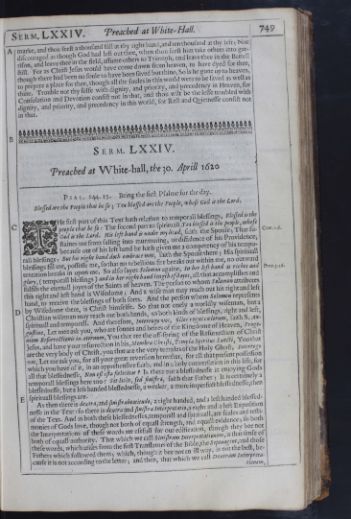 Serm. LXXIV.
Preached at White-Hall.
749
marke, and thou seest a thousand fall at thy right hand, and ten thousand at thy left; Nor
Serm. LXXIV.
Preached at White-Hall.
749
marke, and thou seest a thousand fall at thy right hand, and ten thousand at thy left; Nor
discouraged as though God had left out thee, when thou seest him take others into gar-
rison, and leave thee in the field, assume others to Triumph, and leave thee in the Battell
still. For as Christ Jesus would have come down from heaven, to have dyed for thee,
though there had been no soule to have been saved but thine; So is he gone up to heaven,
to prepare a place for thee, though all the soules in this world were to be saved as well as
thine. Trouble not thy selfe with dignity, and priority, and precedency in Heaven, for
Consolation and Devotion consist not in that, and thou wilt be the lesse troubled with
dignity, and priority, and precedency in this world, for Rest and Quietnesse consist not
in that.
Serm. LXXIV.
Preached at VVWhite-hall, the 30. Aprill 1620
Psal. 144.15. Being the first Psalme for the day.
Blessed are the People that be so; Yea blessed are the People, whose God is the Lord.
THeThe first part of this Text hath relation to temporall blessings, Blessed is the
people that be so: The second part to spirituall, Yea blessed is the people, whose
God is the Lord. His left hand is under my head, saith the Spouse;Cant. 2.6. That su-
staines me from falling into murmuring, or diffidence of his Providence,
because out of his left hand he hath given me a competency of his tempo-
rall blessings; But his right hand doth embrace mee, saith the Spouse there; His spirituall
blessings fill me, possesse me, so that no rebellious fire breaks out within me, no outward
tentation breaks in upon me. So also sayes Solomon againe, Prov. 3.16. In her left hand is riches and
glory, (temporall blessings) and in her right hand length of dayes, all that accomplishes and
fulfils the eternall joyes of the Saints of heaven. The person to whom Solomon attributes
this right and left hand is Wisedome; And a wise man may reach out his right and left
hand, to receive the blessings of both sorts. And the person whom Solomon represents
by Wisedome there, is Christ himselfe. So that not onely a worldly wiseman, but a
Christian wiseman may reach out both hands, to both kinds of blessings, right and left,
spirituall and temporall. And therefore, Interrogo vos, filios regni cælorum, saith S. Au-
gustine, Let mee ask you, who are sonnes and heires of the Kingdome of Heaven, Proge-
niem Resurrectionis in æternum, You that are the off-spring of the Resurrection of Christ
Jesus, and have your resurrection in his, Membra Christi, Templa Spiritus Sancti, You that
are the very body of Christ, you that are the very temples of the Holy Ghost, Interrogo
vos, Let me ask you, for all your great reversion hereafter, for all that present possession
which you have of it, in an apprehensive faith, and in a holy conversation in this life, for
all that blessednesse, Non est ista fælicitas? Is there not a blessednesse in enjoying Gods
temporall blessings here too? Sit licèt, sed sinistra, saith that Father; It is certainely a
blessednesse, but a left handed blessednesse, a weaker, a more imperfect blessednesse, then
spirituall blessings are.
As then there is dextra, and sinistra beatitudo, a right handed, and a left handed blessed-
nesse in the Text: so there is dextra and sinistra Interpretatio, a right and a left Exposition
of the Text. And as both these blessednesses, temporall and spirituall, are seales and testi-
monies of Gods love, though not both of equall strength, and equall evidence; so both
the Interpretations of these words are usefull for our edification, though they bee not
both of equall authority. That which we call Sinistram Interpretationem, is that sense of
these words, which arises from the first Translators of the Bible, the Septuagint, and those
Fathers which followed them; which, though it bee not an ill way, is not the best, be-
cause it is not according to the letter; and then, that which we call Dextram Interpreta-
tionem,
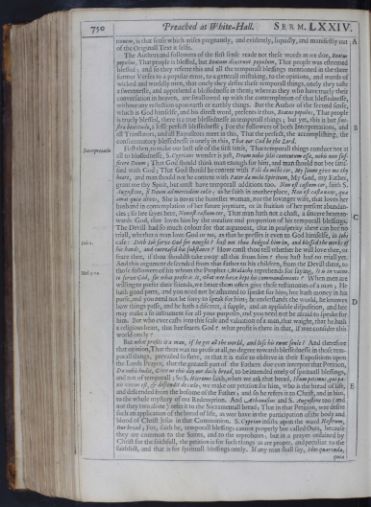 750
Preached at White-Hall.
Serm. LXXIV.
tionem, is that sense which arises pregnantly, and evidently, liquidly, and manifestly out
750
Preached at White-Hall.
Serm. LXXIV.
tionem, is that sense which arises pregnantly, and evidently, liquidly, and manifestly out
of the Originall Text it selfe.
The Authors and followers of the first sense reade not these words as we doe, Beatus
populus, That people is blessed, but Beatum dixerunt populum, That people was esteemed
blessed; and so they referre this and all the temporall blessings mentioned in the three
former Verses to a popular error, to a generall mistaking, to the opinions, and words of
wicked and worldly men, that onely they desire these temporall things, onely they taste
a sweetnesse, and apprehend a blessednesse in them; whereas they who have truely their
conversation in heaven, are swallowed up with the contemplation of that blessednesse,
without any reflection upon earth or earthly things. But the Author of the second sense,
which is God himselfe, and his direct word, presents it thus, Beatus populus, That people
is truely blessed, there is a true blessednesse in temporall things; but yet, this is but sini-
stra beatitudo, a lesse perfect blessednesse; For the followers of both Interpretations, and
all Translators, and all Expositors meet in this, That the perfect, the accomplishing, the
consummatory blessednesse is onely in this, That our God be the Lord.
First then, Interpretatio to make our best use of the first sense, That temporall things conduce not at
all to blessednesse, S. Cyprians wonder is just, Deum nobis solis contentum esse, nobis non suf-
ficere Deum; That God should think man enough for him, and man should not bee satis-
fied with God; That God should be content with Fili da mihi cor, My sonne give me thy
heart, and man should not be content with Pater da mihi Spiritum, My God, my Father,
grant me thy Spirit, but must have temporall additions too. Non est castum cor, saith S.
Augustine, si Deum ad mercedem colit; as he saith in another place, Non est casta uxor, quæ
amat quia dives, She is never the honester woman, nor the lovinger wife, that loves her
husband in contemplation of her future joynture, or in fruition of her present abundan-
cies; so hee sayes here, Non est castum cor, That man hath not a chast, a sincere heart to-
wards God, that loves him by the measure end proportion of his temporall blessings.
The Devill had so much colour for that argument, that in prosperity there can bee no
triall, whether a man love God or no, as that he presses it even to God himselfe, in Iobs
case:Iob 1. Doth Iob serve God for nought? hast not thou hedged him in, and blessed the works of
his hands, and encreased his substance? How canst thou tell whether he will love thee, or
feare thee, if thou shouldst take away all this from him? thou hast had no triall yet.
And this argument descended from that father to his children, from the Devill there, to
those followers of his whom the Prophet Malachy reprehends for saying, It is in vaine Mal. 3.14.
to serve God, for what profit is it, that wee have kept his commandements? When men are
willing to prefer their friends, we heare them often give these testimonies of a man; He
hath good parts, and you need not be ashamed to speake for him; hee hath money in his
purse, and you need not be sorry to speak for him; he understands the world, he knowes
how things passe, and he hath a discreet, a supple, and an appliable disposition, and hee
may make a fit instrument for all your purposes, and you need not be afraid to speake for
him. But who ever casts into this scale and valuation of a man, that waight, that he hath
a religious heart, that hee feares God? what profit is there in that, if wee consider this
world onely?
But what profits it a man, if he get all the world, and lose his owne soule? And therefore
that opinion, That there was no profit at all, no degree towards blessednesse in those tem-
porall things, prevailed so farre, as that it is easie to observe in their Expositions upon
the Lords Prayer, that the greatest part of the Fathers doe ever interpret that Petition,
Da nobis hodie, Give us this day our daily bread, to be intended onely of spirituall blessings,
and not of temporall; So S. Hierome saith, when we ask that bread, Illum petimus, qui pa-
nis vivus est, & descendit de cælo; we make our petition for him, who is the bread of life,
and descended from the bosome of the Father; and so he refers it to Christ, and in him,
to the whole mystery of our Redemption. And Athanasius and S. Augustine too (and
not they two alone) refer it to the Sacramentall bread; That in that Petition, wee desire
such an application of the bread of life, as wee have in the participation of the body and
blood of Christ Jesus in that Communion. S. Cyprian insists upon the word Nostrum,
Our bread; For, saith he, temporall blessings cannot properly bee called Ours, because
they are common to the Saints, and to the reprobates; but in a prayer ordained by
Christ for the faithfull, the petition is for such things as are proper, and peculiar to the
faithfull, and that is for spirituall blessings onely. If any man shall say, Ideo quærenda, quia
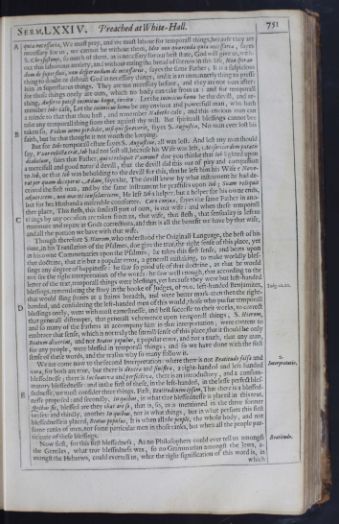 Serm. LXXIV.
Preached at White-Hall.
751
quia necessaria, We must pray, and we must labour for temporall things, because they are
Serm. LXXIV.
Preached at White-Hall.
751
quia necessaria, We must pray, and we must labour for temporall things, because they are
necessary for us, we cannot be without them, Ideo non quærenda quia necessaria, sayes
S. Chrysostome, so much of them, as is necessary for our best state, God will give us, with-
out this laborious anxiety, and without eating the bread of sorrow in this life, Non speran
-
dum de superfluis, non desperandum de necessariis, sayes the same Father; It is a suspicious
thing to doubt or distrust God in necessary things, and it is an unmannerly thing to presse
him in superfluous things. They are not necessary before, and they are not ours after:
for those things onely are ours, which no body can take from us: and for temporall
thing, Auferre potest inimicus homo, invito: Let the inimicus homo be the devill, and re-
member Iobs case, Let the inimicus homo be any envious and powerfull man, who hath
a minde to that that thou hast, and remember Naboths case, and this envious man can
take any temporall thing from thee against thy will. But spirituall blessings cannot bee
taken so, Fidem nemo perdidit, nisi qui spreverit, sayes S. Augustin, No man ever lost his
faith, but he that thought it not worth the keeping.
But for Iobs temporall estate sayes S. Augustine, all was lost. And lest any man should
say, Vxor relicta erat, Iob had not lost all, because his Wife was left, Misericordem putatis
diabolum, saies that Father, qui ei reliquit Vxorem? doe you thinke that Iob lighted upon
a mercifull and good natur'd devill, that the devill did this out of pity and compassion
to Iob, or that Iob was beholding to the devill for this, that he left him his Wife? Nove-
rat per quam deceperat Adam, sayes he, The devill knew by what instrument he had de-
ceived the first man, and by the same instrument he practises upon Iob; Suam reliquit
adjutricem, non mariti consolatricem, He left Iob a helper, but a helper for his owne ends,
but for her Husband a miserable comforter. Caro conjux, sayes the same Father in ano-
ther place, This flesh, this sensuall part of ours, is our wife: and when these temporall
things by any occasion are taken from us, that wife, that flesh, that sensuality is left to
murmure and repine at Gods corrections, and that is all the benefit we have by that wife,
and all the portion we have with that wife.
Though therefore S. Hierom, who understood the Originall Language, the best of his
time, in his Translation of the Psalmes, doe give the true, the right sense of this place, yet
in his owne Commentaries upon the Psalmes, he takes this first sense, and beats upon
that doctrine, that it is but a popular error, a generall mistaking, to make worldly bles-
sings any degree of happinesse: he saw so good use of that doctrine, as that he would
not see the right interpretation of the words: he saw well enough, that according to the
letter of the text, temporall things were blessings, yet because they were but left-handed
blessings, remembring the story in the booke of Judges, of 700. left-handed Benjamites, Iudg. 20.10.
that would sling stones at a haires breadth, and were better mark-men then the right-
handed, and considering the left-handed men of this world, those who pursue temporall
blessings onely, went with most earnestnesse, and best successe to their works, to correct
that generall distemper, that generall vehemence upon temporall things, S. Hierom,
and so many of the Fathers as accompany him in that interpretation, were content to
embrace that sense, which is not truly the literall sense of this place, that it should be only
Beatum dixerint, and not Beatus populus, a popular error, and not a truth, that any man,
for any peopleor any people, were blessed in temporall things; and so we have done with the first
sense of these words, and the reason why so many follow it.
We are come now to the second Interpretation: where there is not Beatitudo falsa and 2.
Interpretatio.
vera, for both are true, but there is dextra and sinistra, a right-handed and left-handed
blessednesse; there is Inchoativa and perfectiva, there is an introductory, and a consum-
matory blessednesse: and in the first of these, in the left-handed, in the lesse perfect bles-
sednesse, we must consider three things. First, Beatitudinem ipsam, That there is a blessed-
nesse proposed: and secondly, In quibus, in what that blessednesse is placed in this text,
Quibus sic, blessed are they that are so, that is, so, as is mentioned in the three former
verses: and thirdly, another In quibus, not in what things, but in what persons this first
blessednesse is placed, Beatus populus, It is when all the people, the whole body, and not
some ranks of men, nor some particular men in those ranks, but when all the people par-
ticipate of these blessings.
Now first, for this first blessedness, Beatitudo. As no Philosophers could ever tell us amongst
the Gentiles, what true blessedness was, so no Grammarian amongst the Jews, a-
mongst the Hebrews, could ever tell us, what the right signification of this word is, in which
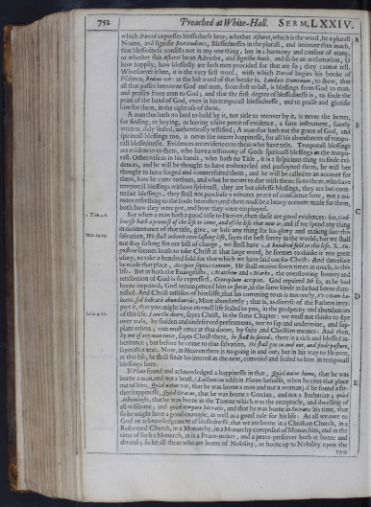 752
Preached at White-Hall.
Serm. LXXIV.
which David expresses blessedness here; whether Asherei, which is the word, be a plurall
752
Preached at White-Hall.
Serm. LXXIV.
which David expresses blessedness here; whether Asherei, which is the word, be a plurall
Noune, and signifie Beatitudines, Blessednesses in the plurall, and intimate thus much,
that blessedness consists not in any one thing, but in a harmony and consent of many;
or whether this Asherei be an Adverbe, and signifie beatè, and so be an acclamation, O
how happily, how blessedly are such men provided for that are so; they cannot tell.
Whatsoever it bee, it is the very first word, with which David begins his booke of
Psalmes; Beatus vir: as the last word of that booke is, Laudate Dominum; to shew, that
all that passes betweene God and man, from first to last, is blessings from God to man,
and praises from man to God; and that the first degree of blessednesse is, to finde the
print of the hand of God, even in his temporall blessednesse, and to praise and glorifie
him for them, in the right use of them.
A man that hath no land to hold by it, nor title to recover by it, is never the better,
for finding, or buying, or having a faire peece of evidence, a faire instrument, fairely
written, duly sealed, authentically testified; A man that hath not the grace of God, and
spirituall blessings too, is never the neerer happinesse, for all his abundances of tempo-
rall blessednesse. Evidences are evidences to them who have title. Temporall blessings
are evidences to them, who have a testimony of Gods spirituall blessings in the tempo-
rall. Otherwise as in his hands, who hath no Title, it is a suspicious thing to finde evi-
dences, and he will be thought to have embeazeled and purloyned them, he will bee
thought to have forged and counterfaited them, and he will be called to an account for
them, how he came to them, and what he meant to doe with them: so to them, who have
temporall blessings without spirituall, they are but uselesse blessings, they are but coun-
terfait blessings, they shall not purchase a minutes peace of conscience here, nor a mi-
nutes refreshing to the soule hereafter; and there must be a heavy account made for them,
both how they were got, and how they were employed.
But when a man hath a good title to Heaven, 1 Tim. 4.8. then these are good evidences: for, God-
linesse hath a promise of the life to come, and of the life that now is; and if we spend any thing
in maintenance of that title, give, or lose any thing for his glory and making sure this
salvation, Mat. 19.29. We shall inherit everlasting life, sayes the best surety in the world; but we shall
not stay so long for our bill of charge, we shall have A hundred fold in this life. S. Au-
gustine seemes loath to take Christ at that large word, he seemes to thinke it too great
usury, to take a hundred fold for that which we have laid out for Christ: And therefore
he reads that place, Accipiet septies tantum, He shall receive seven times as much, in this
life. But in both the Euangelists, Matthew and Marke, the overflowing bounty and
retribution of God is so expressed, Centuplum accipiet. God repaired Iob so, as he had
beene impaired; God recompenced him in specie, in the same kinde as he had beene dam-
nified. And Christ testifies of himselfe, that his comming to us is not onely, Vt vitam ha-
beatis, sed habeatis abundantiùs; More abundantly; that is, as diverse of the Fathers inter-
pret it, that you might have eternall life sealed to you, in the prosperity and abundancies
of this life.Iohn 9.10. I am the doore, sayes Christ, in the same Chapter: we must not thinke to flye
over wals, by sudden and undeserved preferments, nor to sap and undermine, and sup-
plant others; wee must enter at that doore, by faire and Christian meanes: And then,
By me if any man enter, sayes Christ there, he shall be saved; there is a rich and blessed in-
heritance; but before he come to that salvation, He shall goe in and out, and finde pasture,
sayes that text. Now, in Heaven there is no going in and out; but in his way to Heaven,
in this life, he shall finde his interest in the next, conveied and sealed to him in temporall
blessings here.
If Plato found and acknowledged a happinesse in that, Quòd natus homo, that he was
borne a man, and not a beast, (Lactantius adds in Platoes behalfe, when he cites that place
out of him, Quòd natus vir, that he was borne a man and not a woman) if he found a far-
ther happinesse, Quòd Græcus, that he was borne a Grecian, and not a Barbarian; quòd
Atheniensis, that he was borne in the Towne which was the receptacle, and dwelling of
all wisdome; and quòd tempore Socratis, and that he was borne in Socrates his time, that
so he might have a good example, as well as a good rule for his life: As all we owe to
God an acknowledgement of blessednesse, that we are borne in a Christian Church, in a
Reformed Church, in a Monarchy, in a Monarchy composed of Monarchies, and in the
time of such a Monarch, as is a Peace-maker, and a peace-preserver both at home and
abroad; so let all them who are borne of Nobility, or borne up to Nobility upon the two
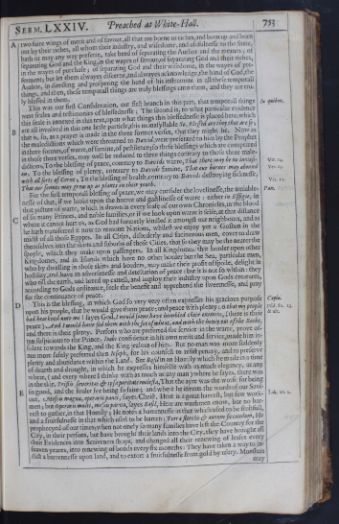 Serm. LXXIV.
Preached at White-Hall.
753
two faire wings of merit and of favour, all that are borne to riches, and born up and born
Serm. LXXIV.
Preached at White-Hall.
753
two faire wings of merit and of favour, all that are borne to riches, and born up and born
out by their riches, all whom their industry, and wisedome, and usefulnesse to the State,
hath or may any way preferre, take heed of separating the Author and the meanes; of
separating God and the King, in the wayes of favour; of separating God and their riches,
in the wayes of purchase; of separating God and their wisedome, in the wayes of pre-
ferment; but let them alwayes discerne, and alwayes acknowledge, the hand of God, the
Author, in directing and prospering the hand of his instrument in all these temporall
things, and then, these temporall things are truly blessings unto them, and they are tru-
ly blessed in them.
This was our first Consideration, our first branch in this part, In quibus. that temporall things
were seales and testimonies of blessednesse; The second is, to what particular evidence
this seale is annexed in this text, upon what things this blessednesse is placed here; which
are all involved in this one little particle, this monasyllable So, Blessed are they that are so;
that is, so, as a prayer is made in the three former verses, that they might be. Now as
the maledictions which were threatned to David, were presented to him by the Prophet
in three formes, of warre, of famine, of pestilence; so these blessings which are comprized
in those three verses, may well be reduced to three things contrary to those three male-
dictions; To the blessing of peace, contrary to Davids warre, Ver. 14. That there may be no invasi-
on; To the blessing of plenty, contrary to Davids famine, Ver. 13. That our barnes may abound
with all sorts of Corne; To the blessing of health, contrary to Davids destroying sicknesse,
That our sonnes may grow up as plants in their youth.Ver. 12.
For the first temporall blessing of peace, we may consider the lovelinesse, Pax. the amiable-
nesse of that, if we looke upon the horror and gastlinesse of warre: either in Effigie, in
that picture of warre, which is drawn in every leafe of our own Chronicles, in the blood
of so many Princes, and noble families, or if we look upon warre it selfe, at that distance
where it cannot hurt us, as God had formerly kindled it amongst our neighbours, and as
he hath transferred it now to remoter Nations, whilest we enjoy yet a Goshen in the
midst of all those Egypts. In all Cities, disorderly and facinorous men, covet to draw
themselves into the skirts and suburbs of those Cities, that so they may be the nearer the
spoyle, which they make upon passengers. In all Kingdomes that border upon other
Kingdomes, and in Islands which have no other border but the Sea, particular men,
who by dwelling in those skirts and borders, may make their profit of spoile, delight in
hostility, and have an adversenesse and detestation of peace: but it is not so within: they
who till the earth, and breed up cattell, and imploy their industry upon Gods creatures,
according to Gods ordinance, feele the benefit and apprehend the sweetnesse, and pray
for the continuance of peace.
Copia. This is the blessing, in which God so very very often expresses his gracious purpose
upon his people, that he would give them peace; and peace with plenty; O that my people Psal. 81.13.
& ult.
had hearkned unto me! sayes God, I would soone have humbled their enemies, (there is their
peace) And I would have fed them with the fat of wheat, and with the honey out of the Rocke,
and there is their plenty. Persons who are preferred for service in the warre, prove of-
ten suspicious to the Prince. Ioabs confidence in his own merit and service, made him in-
solent towards the King, and the King jealous of him. But no man was more suddenly
nor more safely preferred then Ioseph, for his counsell to resist penury, and to preserve
plenty and abundance within the Land. See Basil in an Homily which he made in a time
of dearth and drought, in which he expresses himselfe with as much elegancy, as any
where, (and every where I thinke with as much as any man) where he sayes, there was
in the skie, Tristis severitas & ipsa puritate molesta, That the ayre was the worse for being
so good, and the fouler for being so faire; and where he inverts the words of our Savi-
our, Messis magna, operarii pauci, sayes Christ, Here is a great harvest, Luk. 10.2. but few work-
men; but Operarii multi, messis parva, sayes Basil, Here are workmen enow, but no har-
vest to gather, in that Homily; He notes a barrennesse in that which used to be fruitfull,
and a fruitfulnesse in that which used to be barren; Terra sterilis & aurum fœcundum, He
prophecyed of our times; when not onely so many families have left the Country for the
City, in their persons, but have brought their lands into the City, they have brought all
their Evidences into Scriveners shops, and changed all their renewing of leases every
seaven yeares, into renewing of bonds every six moneths: They have taken a way to in-
flict a barrennesse upon land, and to extort a fruitfulnesse from gold by usury. Monsters may
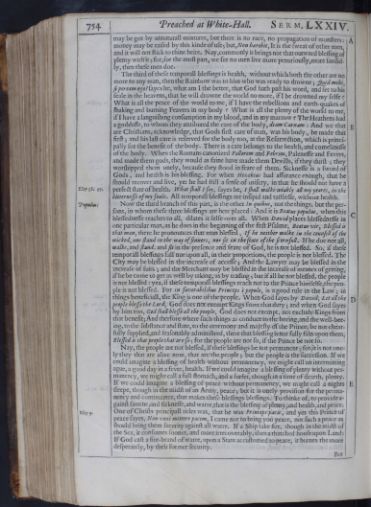 754
Preached at White-Hall.
Serm. LXXIV.
may be got by unnaturall mixtures, but there is no race, no propagation of monsters:
754
Preached at White-Hall.
Serm. LXXIV.
may be got by unnaturall mixtures, but there is no race, no propagation of monsters:
money may be raised by this kinde of use; but, Non hærebit, It is the sweat of other men,
and it will not stick to thine heire. Nay, commonly it brings not that outward blessing of
plenty with it; for, for the most part, we see no men live more penuriously, more sordid-
ly, then these men doe.
The third of these temporall blessings is health, without which both the other are no
more to any man, then the Rainbow was to him who was ready to drowne; Quid mihi,
si peream ego? sayes he, what am I the better, that God hath past his word, and set to his
seale in the heavens, that he will drowne the world no more, if I be drowned my selfe?
What is all the peace of the world to me, if I have the rebellions and earth-quakes of
shaking and burning Feavers in my body? What is all the plenty of the world to me,
if I have a languishing consumption in my blood, and in my marrow? The Heathens had
a goddesse, to whom they attributed the care of the body, deam Carnam: And we that
are Christians, acknowledge, that Gods first care of man, was his body, he made that
first; and his last care is reserved for the body too, at the Resurrection, which is princi-
pally for the benefit of the body. There is a care belongs to the health, and comelinesse
of the body. When the Romans canonized Pallorem and Febrim, Palenesse and Fevers,
and made them gods, they would as faine have made them Devills, if they durst; they
worshipped them onely, because they stood in feare of them. Sicknesse is a sword of
Gods, and health is his blessing. For when Hezekias had assurance enough, that he
should recover and live, yet he had still a sense of misery, in that he should not have a
perfect state of health.Esay 38.15. What shall I say, sayes he, I shall walke weakly all my yeares, in the
bitternesse of my soule. All temporall blessings are insipid and tastlesse, without health.
Now the third branch of this part, Populus. is the other In quibus, not the things, but the per-
sons, in whom these three blessings are here placed: And it is Beatus populus, when this
blessednesse reaches to all, dilates it selfe over all. When David places blessednesse in
one particular man, as he does in the beginning of the first Psalme, Beatus vir, Blessed is
that man, there he pronounces that man blessed, If he neither walke in the counsell of the
wicked, nor stand in the way of sinners, nor sit in the seate of the scornfull. If he doe not all,
walke, and stand, and sit in the presence and feare of God, he is not blessed. So, if these
temporall blessings fall not upon all, in their proportions, the people is not blessed. The
City may be blessed in the increase of accesse; And the Lawyer may be blessed in the
increase of suits; and the Merchant may be blessed in the increase of meanes of getting,
if he be come to get as well by taking, as by trading; but if all be not blessed, the people
is not blessed: yea, if these temporall blessings reach not to the Prince himselfe, the peo-
ple is not blessed. For in favorabilibus Princeps è populo, is a good rule in the Law; in
things beneficiall, the King is one of the people. When God sayes by David, Let all the
people blesse the Lord, God does not exempt Kings from that duty; and when God sayes
by him too, God shall blesse all the people, God does not exempt, not exclude Kings from
that benefit; And therfore where such things as conduce to the beeing, and the well-bee-
ing, to the substance and state, to the ceremony and majesty of the Prince, be not chear-
fully supplied, and seasonably administred, there that blessing is not fully faln upon them,
Blessed is that people that are so; for the people are not so, if the Prince be not so.
Nay, the people are not blessed, if these blessings be not permanent; for, it is not one-
ly they that are alive now, that are the people; but the people is the succession. If we
could imagine a blessing of health without permanency, we might call an intermitting
ague, a good day in a fever, health. If we could imagine a blessing of plenty without per-
manency, we might call a full stomach, and a surfet, though in a time of dearth, plenty.
If we could imagine a blessing of peace without permanency, we might call a nights
sleepe, though in the midst of an Army, peace; but it is onely provision for the perma-
nency and continuance, that makes these blessings blessings. To thinke of, to provide a-
gainst famine, and sicknesse, and warre, that is the blessing of plenty, and health, and peace.
One of Christs principall titles was, Esay 9. that he was Princeps pacis, and yet this Prince of
peace sayes, Non veni mittere pacem, I came not to bring you peace, not such a peace as
should bring them security against all warre. If a Ship take fire, though in the midst of
the Sea, it consumes sooner, and more irrecoverably, then a thatched house upon Land:
If God cast a fire-brand of warre, upon a State accustomed to peace, it burnes the more
desperately, by their former security. But
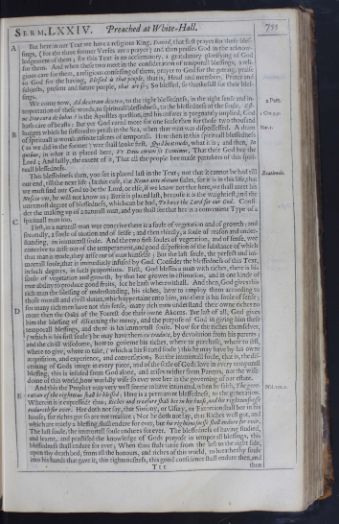 Serm. LXXIV.
Preached at White-Hall.
755
Serm. LXXIV.
Preached at White-Hall.
755
But here in our Text we have a religious King, David, that first prayes for these bles-
sings, (for the three former Verses are a prayer) and then praises God in the acknow-
ledgement of them; for this Text is an acclamatory, a gratulatory glorifying of God
for them. And when these two meet in the consideration of temporall blessings, a reli-
gious care for them, a religious confessing of them, prayer to God for the getting, praise
to God for the having, Blessed is that people, that is, Head and members, Prince and
subjects, present and future people, that are so; So blessed, so thankefull for their bles-
sings.
We come now, Ad dextram dextræ, to the right blessedness, 2 Part. in the right sense and in-
terpretation of these words, to spirituall blessedness, to the blessedness of the soule. Est-
ne Deo cura de bobus? is the Apostles question, and his answer is pregnantly implied, 1 Cor. 9.9. God
hath care of beasts: But yet God cared more for one soule then for those two thousand
hogges which he suffered to perish in the Sea, when that man was dispossessed.Mar. 5. A dram
of spirituall is worth infinite talents of temporall. Here then in this spirituall blessedness
(as we did in the former) wee shall looke first, Quid beatitudo, what it is; and then, In
quibus, in what it is placed here, Vt Deus eorum sit Dominus, That their God bee the
Lord; And lastly, the extent of it, That all the people bee made partakers of this spiri-
tuall blessedness.
This blessedness then, you see is placed last in the Text;Beatitudo. not that it cannot be had till
our end, till the next life; In this case, the Nemo ante obitum failes, for it is in this life, that
we must find our God to be the Lord, or else, if we know not that here, we shall meet his
Nescio vos, he will not know us; But it is placed last, because it is the waightiest, and the
uttermost degree of blessedness, which can be had, To have the Lord for our God. Consi-
der the making up of a naturall man, and you shall see that hee is a convenient Type of a
spirituall man too.
First, in a naturall man wee conceive there is a soule of vegetation and of growth; and
secondly, a soule of motion and of sense; and then thirdly, a soule of reason and under-
standing, an immortall soule. And the two first soules of vegetation, and of sense, wee
conceive to arise out of the temperament, and good disposition of the substance of which
that man is made, they arise out of man himselfe; But the last soule, the perfect and im-
mortall soule, that is immediatly infused by God. Consider the blessedness of this Text,
in such degrees, in such proportions. First, God blesses a man with riches, there is his
soule of vegetation and growth, by that hee growes in estimation, and in one kinde of
true ability to produce good fruits, for he hath wherewithall. And then, God gives this
rich man the blessing of understanding, his riches, how to employ them according to
those morall and civill duties, which appertaine unto him, and there is his soule of sense;
for many rich men have not this sense, many rich men understand their owne riches no
more then the Oaks of the Forrest doe their owne Akorns. But last of all, God gives
him the blessing of discerning the mercy, and the purpose of God in giving him these
temporall blessings, and there is his immortall soule. Now for the riches themselves,
(which is his first soule) he may have them ex traduce, by devolution from his parents;
and the civill wisedome, how to governe his riches, where to purchase, where to sell,
where to give, where to take, (which is his second soule) this he may have by his owne
acquisition, and experience, and conversation; But the immortall soule, that is, the dis-
cerning of Gods image in every piece, and of the seale of Gods love in every temporall
blessing, this is infused from God alone, and arises neither from Parents, nor the wise-
dome of this world, how worldly wise so ever wee bee in the governing of our estate.
And this the Prophet may very well seeme to have intimated, when he saith, Psal. 112.1. The gene-
ration of the righteous shall be blessed; Here is a permanent blessedness, to the generation.
Wherein is it expressed? thus; Riches and treasure shall bee in his house, and his righteousnesse
endureth for ever. Hee doth not say, that Simony, or Usury, or Extortion shall bee in his
house; for riches got so are not treasure; Nor he doth not say, that Riches well got, and
which are truely a blessing, shall endure for ever, but his righteousnesse shall endure for ever.
The last soule, the immortall soule endures for ever. The blessedness of having studied,
and learnt, and practised the knowledge of Gods purpose in temporall blessings, this
blessedness shall endure for ever; When thou shalt turne from the left to the right side,
upon thy death bed, from all the honours, and riches of this world, to breathe thy soule
into his hands that gave it, this righteousness, this good conscience shall endure then, and Ttt then
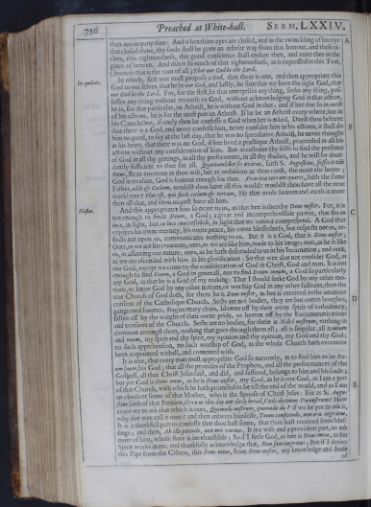 756
Preached at White-hall.
Serm. LXXIV.
then accompany thee: And when thine eyes are closed, and in the twinckling of his eye
756
Preached at White-hall.
Serm. LXXIV.
then accompany thee: And when thine eyes are closed, and in the twinckling of his eye
that closed thine, thy soule shall be gone an infinite way from this honour, and these ri-
ches, this righteousness, this good conscience shall endure then, and meet thee in the
gates of heaven. And this is so much of that righteousness, as is expressed in this Text,
(because this is the root of all) That our God be the Lord.
In which, In quibus. first wee must propose a God, that there is one, and then appropriate this
God to our selves, that he be our God, and lastly, be sure that we have the right God, that
our God be the Lord. For, for the first, he that enterprises any thing, seeks any thing, pos-
sesses any thing without recourse to God, without acknowledging God in that action,
he is, for that particular, an Atheist, he is without God in that; and if hee doe so in most
of his actions, he is for the most part an Atheist. If he be an Atheist every where, but in
his Catechisme, if onely then he confesse a God when hee is asked, Doest thou beleeve
that there is a God, and never confesse him, never consider him in his actions, it shall do
him no good, to say at the last day, that he was no speculative Atheist, he never thought
in his heart, that there was no God, if hee lived a practique Atheist, proceeded in all his
actions without any consideration of him. But accustome thy selfe to find the presence
of God in all thy gettings, in all thy preferments, in all thy studies, and he will be abun-
dantly sufficient to thee for all. Quantumlibet sis avarus, saith S. Augustine, sufficit tibi
Deus, Be as covetous as thou wilt, bee as ambitious as thou canst, the more the better;
God is treasure, God is honour enough for thee. Avaritia terram quærit, saith the same
Father, adde & Cœlum; wouldst thou have all this world? wouldst thou have all the next
world too? Plus est, qui fecit cœlum & terram, He that made heaven and earth is more
then all that, and thou mayest have all him.
And this appropriates him so neare to us, Noster. as that hee is thereby Deus noster. For, it is
not enough to finde Deum, a God; a great and incomprehensible power, that sits in
luce, in light, but in luce inaccessibili, in light that we cannot comprehend. A God that
enjoyes his owne eternity, his owne peace, his owne blessedness, but respects not us, re-
flects not upon us, communicates nothing to us. But it is a God, that is Deus noster;
Ours, as we are his creatures; ours, as we are like him, made to his image; ours, as he is like
us, in assuming our nature; ours, as he hath descended to us in his Incarnation; and ours,
as we are ascended with him in his glorification: So that wee doe not consider God, as
our God, except we come to the consideration of God in Christ, God and man. It is not
enough to find Deum, a God in generall, nor to find Deum meum, a God so particularly
my God, as that he is a God of my making: That I should seeke God by any other mo-
tions, or know God by any other notions, or worship God in any other fashions, then the
true Church of God doth, for there he is Deus noster, as hee is received in the unanime
consent of the Catholique Church. Sects are not bodies, they are but rotten boughes,
gangrened limmes, fragmentary chips, blowne off by their owne spirit of turbulency,
fallen off by the waight of their owne pride, or hewen off by the Excommunications
and censures of the Church. Sects are no bodies, for there is Nihil nostrum, nothing in
common amongst them, nothing that goes through them all; all is singular, all is meum
and tuum, my spirit and thy spirit, my opinion and thy opinion, my God and thy God;
no such apprehension, no such worship of God, as the whole Church hath evermore
been acquainted withall, and contented with.
It is true, that every man must appropriate God so narrowly, as to find him to be De-
um suum, his God; that all the promises of the Prophets, and all the performances of the
Gospell, all that Christ Jesus said, and did, and suffered, belongs to him and his soule;
but yet God is Deus meus, as he is Deus noster, my God, as he is our God, as I am a part
of that Church, with which he hath promised to be till the end of the world, and as I am
an obedient sonne of that Mother, who is the Spouse of Christ Jesus: For as S. Augu-
stine saith of that Petition, Give us this day our daily bread, Vnde dicimus Da nostrum? How
come we to ask that which is ours, Quomodo nostrum, quomodo da? if we be put to ask it,
why doe wee call it ours? and then answers himselfe, Tuum confitendo, non eris ingratus,
It is a thankfull part to confesse that thou hast some, that thou hast received some bles-
sings; and then, Ab illo petendo, non eris vacuus, It is a wise and a provident part, to ask
more of him, whose store is inexhaustible; So if I feele God, as hee is Deus meus, as his
Spirit works in me, and thankfully acknowledge that, Non sum ingratus; But if I derive
this Pipe from the Cistern, this Deus meus, from Deus noster, my knowledge and sense of
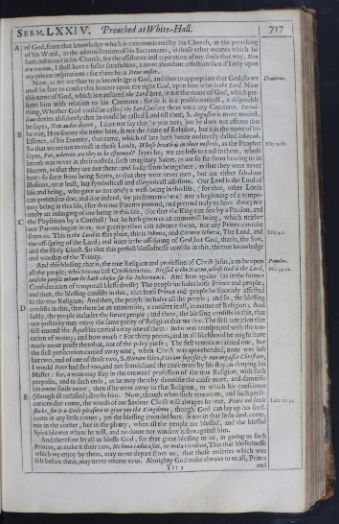 Serm. LXXIV.
Preached at White-Hall.
757
of God, from that knowledge which is communicated by his Church, in the preaching
Serm. LXXIV.
Preached at White-Hall.
757
of God, from that knowledge which is communicated by his Church, in the preaching
of his Word, in the administration of his Sacraments, in those other meanes which he
hath instituted in his Church, for the assistance and reparation of my soule that way, Non
ero vacuus, I shall have a fuller satisfaction, a more abundant refection then if I rely upon
my private inspirations: for there he is Deus noster.
Now, as we are thus to acknowledge a God, and thus to appropriate that God;Dominus. so we
must be sure to confer this honour upon the right God, upon him who is the Lord. Now
this name of God, which is translated the Lord here, is not the name of God, which pre-
sents him with relation to his Creatures: for so it is a problematicall, a disputable
thing, Whether God could be called the Lord, before there were any Creatures. Tertul-
lian denies absolutely that he could be called Lord till then; S. Augustin is more modest,
he sayes, Non audeo dicere, I dare not say that he was not; but he does not affirme that
he was; Howsoever the name here, is not the name of Relation, but it is the name of his
Essence, of his Eternity, that name, which of late hath beene ordinarily called Iehovah.
So that we are not to trust in those Lords, Whose breath is in their nostrils, Esay 2. ult. as the Prophet
sayes, For, wherein are they to be esteemed? sayes he; we are lesse to trust in them, whose
breath was never in their nostrils, such imaginary Saints, as are so far from hearing us in
Heaven, as that they are not there: and so far from being there, as that they were never
here: so farre from being Saints, as that they were never men, but are either fabulous
illusions, or at least, but symbolicall and allegoricall allusions. Our Lord is the Lord of
life and being, who gave us not onely a well-being in this life, (for that, other Lords
can pretend to doe, and doe indeed, by preferments here) nor a beginning of a tempo-
rary being in this life, (for that our Parents pretend, and pretend truly to have done) nor
onely an enlarging of our being in this life, (for that the King can doe by a Pardon, and
the Physitians by a Cordiall) but he hath given us an immortall being, which neither
our Parents began in us, nor great persons can advance for us, nor any Prince can take
from us. This is the Lord in this place, this is Iehova, and Germen Iehovæ, The Lord, Esay 4.2. and
the off-spring of the Lord; and none is the off-spring of God, but God, that is, the Son,
and the Holy Ghost. So that this perfect blessednesse consists in this, the true knowledge
and worship of the Trinity.
And this blessing, that is, the true Religion and profession of Christ Jesus, Populus. is to be upon
all the people; which is our last Confideration. Blessed is the Nation, whose God is the Lord, Psal. 33.12.
and the people whom he hath chosen for his Inheritance. And here againe (as in the former
Consideration of temporall blessednesse) The people includes both Prince and people;
and then, the blessing consists in this, that both Prince and people be sincerely affected
to the true Religion; And then, the people includes all the people; and so, the blessing
consists in this, that there be an unanimitie, a consent in all, in matter of Religion; And
lastly, the people includes the future people; and there, the blessing consists in this, that
our posterity may enjoy the same purity of Religion that we doe. The first tentation that
fell amonst the Apostles carried away one of them: Iudas was transported with the ten-
tation of money; and how much? For thirty peeces, and in all likelihood he might have
made more profit then that, out of the privy purse; The first tentation carried one, but
the first persecution carried away nine, when Christ was apprehended, none was left
but two, and of one of those two, S. Hierom saies, Vtinam fugisset & non negasset Christum,
I would Peter had fled too, and not scandalized the cause more by his stay, in denying his
Master: for, a man may stay in the outward profession of the true Religion, with such
purposes, and to such ends, as he may thereby damnifie the cause more, and damnifie
his owne soule more, then if he went away to that Religion, to which his conscience
(though ill rectified) directs him. Now, though when such tentations, and such perse-
cutions doe come, the words of our Saviour Christ will alwayes be true, Luke 12 .32. Feare not little
flocke, for it is Gods pleasure to give you the Kingdome, though God can lay up his seed-
corne in any little corner, yet the blessing intended here, is not in that little seed-corne,
nor in the corner, but in the plenty, when all the people are blessed, and the blessed
Spirit blowes where he will, and no doore nor window is shut against him.
And therefore let all us blesse God, for that great blessing to us, in giving us such
Princes, as make it their care, Ne bona caduca sint, ne mala recidiva, That that blessednesse
which we enjoy by them, may never depart from us, that those miseries which wee
felt before them, may never returne to us. Almighty God make alwaies to us all, Prince Ttt2 and
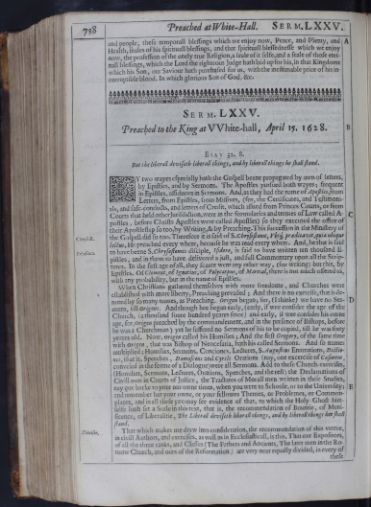 758
Preached at White-Hall.
Serm. LXXV.
and people, these temporall blessings which we enjoy now, Peace, and Plenty, and
758
Preached at White-Hall.
Serm. LXXV.
and people, these temporall blessings which we enjoy now, Peace, and Plenty, and
Health, seales of his spirituall blessings, and that spirituall blessednesse which we enjoy
now, the profession of the onely true Religion, a seale of it selfe, and a seale of those eter-
nall blessings, which the Lord the righteous Judge hath laid up for his, in that Kingdome
which his Son, our Saviour hath purchased for us, with the inestimable price of his in-
corruptible blood. In which glorious Son of God, &c.
Serm. LXXV.
Preached to the King at VVWhite-hall, April 15. 1628.
Esay 32.8.
But the liberall deviseth liberall things, and by liberall things he shall stand.
BYBy two wayes especially hath the Gospell beene propagated by men of letters,
by Epistles, and by Sermons. The Apostles pursued both wayes; frequent
in Epistles, assiduous in Sermons. And, as they had the name of Apostles, from
Letters, from Epistles, from Missives, (for, the Certificates, and Testimoni-
als, and safe-conducts, and letters of Credit, which issued from Princes Courts, or from
Courts that held other Jurisdiction, were in the formularies and termes of Law called A-
postles, before Christs Apostles were called Apostles) so they executed the office of
their Apostleship so too, by Writing, & by Preaching. This succession in the Ministery of
the Gospell did so too.Chrysost. Therefore it is said of S. Chrysostome, VbiVbique prædicavit, quia ubique
lectus, He preached every where, because he was read every where. And, he that is said
to have beene S.Pelusiota. Chrysostomes disciple, Isidore, is said to have written ten thousand E-
pistles, and in them to have delivered a just, and full Commentary upon all the Scrip-
tures. In the first age of all, they scarce went any other way, (for writing) but this, by
Epistles. Of Clement, of Ignatius, of Polycarpus, of Martial, there is not much offered us,
with any probability, but in the name of Epistles.
When Christians gathered themselves with more freedome, and Churches were
established with more liberty, Preaching prevailed; And there is no exercise, that is de-
noted by so many names, as Preaching. Origen began; for, (I thinke) we have no Ser-
mons, till Origens. And though hee began early, (early, if wee consider the age of the
Church, (a thousand foure hundred yeares since) and early, if wee consider his owne
age, for, Origen preached by the commandement, and in the presence of Bishops, before
he was a Churchman) yet he suffered no Sermons of his to be copied, till he was sixty
yeares old. Now, Origen called his Homilies; And the first Gregory, of the same time
with Origen, that was Bishop of Neocesaria, hath his called Sermons. And so names
multiplied; Homilies, Sermons, Conciones, Lectures, S. Augustins Enarrations, Dictio-
nes, that is, Speeches, Damascens and Cyrils Orations (nay, one excercise of Cæsareus,
conveied in the forme of a Dialogue) were all Sermons. Add to these Church-exercises,
(Homilies, Sermons, Lectures, Orations, Speeches, and the rest) the Declamations of
Civill men in Courts of Justice, the Tractates of Morall men written in their Studies,
nay goe backe to your our owne timesto your owne times, when you went to Schoole, or to the University;
and remember but your owne, or your fellowes Themes, or Problemes, or Common-
places, and in all these you may see evidence of that, to which the Holy Ghost him-
selfe hath set a Seale in this text, that is, the recommendation of Bountie, of Muni-
ficence, of Liberalitie, The Liberall deviseth liberall things, and by liberall things hee shall
stand.
That which makes me draw into consideration, Divisio. the recommendation of this vertue,
in civill Authors, and exercises, as well as in Ecclesiasticall, is this, That our Expositors,
of all the three ranks, and Classes (The Fathers and Ancients, The later men in the Ro-
mane Church, and ours of the Reformation) are very near equally divided, in every of these
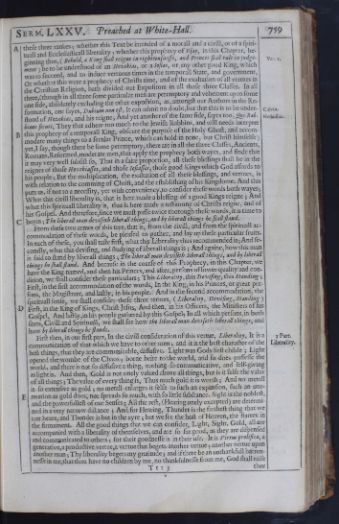 Serm. LXXV.
Preached at White-Hall.
759
these three rankes; whether this Text be intended of a morall and a civill, or of a spiri-
Serm. LXXV.
Preached at White-Hall.
759
these three rankes; whether this Text be intended of a morall and a civill, or of a spiri-tuall and Ecclesiasticall liberality; whether this prophecy of Esay, in this Chapter, be-
ginning thus, Ver. 1. (Behold, a King shall reigne in righteousnesse, and Princes shall rule in judge-
ment) be to be understood of an Hezekias, or a Iosias, or any other good King, which
was to succeed, and to induce vertuous times in the temporall State, and government,
Or whether this were a prophecy of Christs time, and of the exaltation of all vertues in
the Christian Religion, hath divided our Expositors in all those three Classes. In all
three, (though in all three some particular men are peremptory and vehement upon some
one side, absolutely excluding the other exposition, as, amongst our Authors in the Re-
formation, one sayes, Dubium non est, It can admit no doubt, Calvin. but that this is to be under-
stood of Hezekias, and his reigne, And yet another of the same side, sayes too, Heshusius. Qui Rab-
binos secuti, They that adhere too much to the Jewish Rabbins, and will needs interpret
this prophecy of a temporall King, obscure the purpose of the Holy Ghost, and accom-
modate many things to a secular Prince, which can hold in none, but Christ himselfe)
yet, I say, though there be some peremptory, there are in all the three Classes, Ancients,
Romans, Reformed, moderate men, that apply the prophecy both wayes, and finde that
it may very well subsist so, That in a faire proportion, all these blessings shall be in the
reignes of those Hezekiasses, and those Iosiasses, those good Kings which God affords to
his people; But the multiplication, the exaltation of all these blessings, and vertues, is
with relation to the comming of Christ, and the establishing of his Kingdome. And this
puts us, if not to a necessity, yet with conveniency, to consider these words both wayes;
What this civill liberality is, that is here made a blessing of a good Kings reigne; And
what this spirituall liberality is, that is here made a testimony of Christs reigne, and of
his Gospel. And therefore, since we must passe twice thorough these words, it is time to
begin; The liberall man deviseth liberall things, and by liberall things he shall stand.
From these two armes of this tree, that is, from the civill, and from the spirituall ac-
commodation of these words, be pleased to gather, and lay up these particular fruits.
In each of these, you shall taste first, what this Liberality thus recommended is; And se-
condly, what this devising, and studying of liberall things is; And againe, how this man
is said to stand by liberall things; The liberall man deviseth liberall things, and by liberall
things he shall stand. And because in the course of this Prophecy, in this Chapter, we
have the King named, and then his Princes, and after, persons of lower quality and con-
dition, we shall consider these particulars; This Liberality, this Devising, this Standing;
First, in the first accommodation of the words, In the King, in his Princes, or great per-
sons, the Magistrate, and lastly, in his people. And in the second accommodation, the
spirituall sense, we shall consider these three termes, (Liberality, Devising, Standing)
First, in the King of Kings, Christ Jesus, And then, in his Officers, the Ministers of his
Gospel, And lastly, in his people gathered by this Gospel; In all which persons, in both
sorts, Civill and Spirituall, we shall see how the liberall man deviseth liberall things, and
how by liberall things he stands.
First then, in our first part, In the civill consideration of this vertue, Liberality, 1 Part.
Liberality. It is a
communication of that which we have to other men; and it is the best character of the
best things, that they are communicable, diffusive. Light was Gods first childe; Light
opened the wombe of the Chaos; borne heire to the world, and so does possesse the
world; and there is not so diffusive a thing, nothing so communicative, and self-giving
as light is. And then, Gold is not onely valued above all things, but is it selfe the value
of all things; The value of every thing is, Thus much gold it is worth; And no metall
is so extensive as gold; no metall enlarges it selfe to such an expansion, such an atte-
nuation as gold does, nor spreads so much, with so little substance. Sight is the noblest,
and the powerfullest of our Senses; All the rest, (Hearing onely excepted) are determi-
ned in a very narrow distance; And for Hearing, Thunder is the farthest thing that we
can heare, and Thunder is but in the ayre; but we see the host of Heaven, the starres in
the firmament. All the good things that we can consider, Light, Sight, Gold, all are
accompanied with a liberality of themselves, and are so far good, as they are dispensed
and communicated to others; for their goodnesse is in their use. It is Virtus prolifica, a
generative, a productive vertue, a vertue that begets another vertue; another vertue upon
another man; Thy liberality begets my gratitude; and if there be an unthankfull barren-
nesse in me, that thou have no children by me, no thankfulnesse from me, God shall raise Ttt3 thee
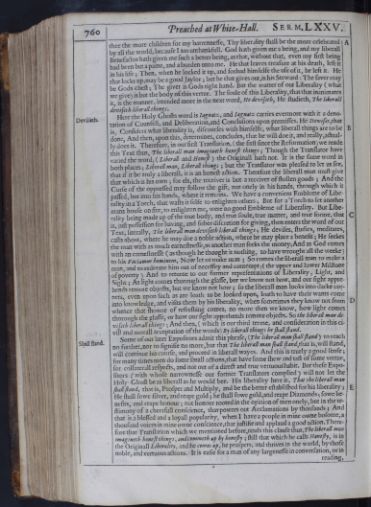 760
Preached at White-Hall.
Serm. LXXV.
thee the more children for my barrennesse, Thy liberality shall be the more celebrated
760
Preached at White-Hall.
Serm. LXXV.
thee the more children for my barrennesse, Thy liberality shall be the more celebrated
by all the world, because I am unthankfull. God hath given me a being, and my liberall
Benefactor hath given me such a better being, as that, without that, even my first being
had been but a paine, and a burden unto me. He that leaves treasure at his death, left it
in his life; Then, when he locked it up, and forbad himselfe the use of it, be left it. He
that locks up, may be a good Jaylor; but he that gives out, is his Steward: The saver may
be Gods chest; The giver is Gods right hand. But the matter of our Liberality (what
we give) is but the body of this vertue. The soule of this Liberality, that that inanimates
it, is the manner, intended more in the next word, He deviseth, He studieth, The liberall
deviseth liberall things.
Here the Holy Ghosts word is Iagnatz, Deviseth. and Iagnatz carries evermore with it a deno-
tation of Counsell, and Deliberation, and Conclusions upon premisses. He Devises, that
is, Considers what liberality is, discourses with himselfe, what liberall things are to be
done, And then, upon this, determines, concludes, that he will doe it, and really, actual-
ly does it. Therefore, in our first Translation, (the first since the Reformation) we reade
this Text thus, The liberall man imagineth honest things; Though the Translator have
varied the word, (Liberall and Honest) the Originall hath not. It is the same word in
both places; Liberall man, Liberall things; but the Translator was pleased to let us see,
that if it be truly a liberall, it is an honest action. Therefore the liberall man must give
that which is his own; for els, the receiver is but a receiver of stollen goods; And the
Curse of the oppressed may follow the gift, not onely in his hands, through which it
passed, but into his hands, where it remains. We have a convenient Embleme of Libe-
rality in a Torch, that wasts it selfe to enlighten others; But for a Torch to set another
mans house on fire, to enlighten me, were no good Embleme of Liberality. But Libe-
rality being made up of the true body, and true soule, true matter, and true forme, that
is, just possession for having, and sober discretion for giving, then enters the word of our
Text, literally, The liberall man deviseth liberall things; He devises, studies, meditates,
casts about, where he may doe a noble action, where he may place a benefit; He seekes
the man with as much earnestnesse, as another man seeks the money; And as God comes
with an earnestnesse (as though he thought it nothing, to have wrought all the weeke)
to his Faciamus hominem, Now let us make man; So comes the liberall man to make a
man, and to redeeme him out of necessity and contempt; (the upper and lower Milstone
of poverty) And to returne to our former representations of Liberality, Light, and
Sight; As light comes thorough the glasse, but we know not how, and our sight appre-
hends remote objects, but we know not how; so the liberall man looks into darke cor-
ners, even upon such as are loath to be looked upon, loath to have their wants come
into knowledge, and visits them by his liberality, when sometimes they know not from
whence that showre of refreshing comes, no more then we know, how light comes
thorough the glasse, or how our sight apprehends remote objects. So the liberall man de-
viseth liberall things; And then, (which is our third terme, and consideration in this ci-
vill and morall acceptation of the words) By liberall things he shall stand.
Some of our later Expositors admit this phrase, (The liberall man shall stand) to reach Shall stand.
no further, nor to signifie no more, but that The liberall man shall stand, that is, will stand,
will continue his course, and proceed in liberall wayes. And this is truely a good sense;
for many times men do some small actions, that have some shew and tast of some vertue,
for collaterall respects, and not out of a direct and true vertuous habit. But these Expo-
sitors (with whose narrownesse our former Translators complied) will not let the
Holy Ghost be as liberall as he would bee. His liberality here is, That the liberall man
shall stand, that is, Prosper and Multiply, and be the better established for his liberality;
He shall sowe silver, and reape gold; he shall sowe gold, and reape Diamonds; sowe be-
nefits, and reape honour; not honour rooted in the opinion of men onely, but in the te-
stimony of a cheerfull conscience, that powres out Acclamations by thousands; And
that is a blessed and a loyall popularity, when I have a people in mine owne bosome, a
thousand voices in mine owne conscience, that justifie and applaud a good action. There-
fore that Translation which we mentioned before, reads this clause thus, The liberall man
imagineth honest things, and commeth up by honesty; still that which he calls Honesty, is in
the Originall Liberality, and he comes up, he prospers, and thrives in the world, by those
noble, and vertuous actions. It is easie for a man of any largenesse in conversation, or in reading,
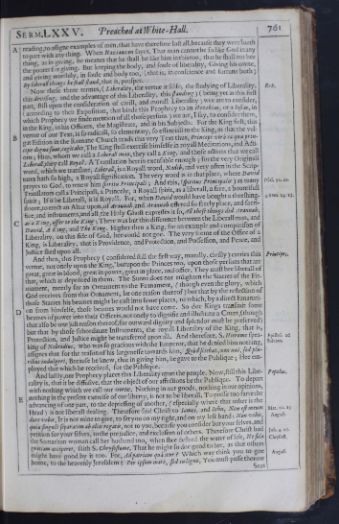 Serm. LXXV.
Preached at White-Hall.
761
reading, to assigne examples of men, that have therefore lost all, because they were loath
Serm. LXXV.
Preached at White-Hall.
761
reading, to assigne examples of men, that have therefore lost all, because they were loath
to part with any thing. When Nazianzen sayes, That man cannot be so like God in any
thing, as in giving, he meanes that he shall be like him in this too, that he shall not bee
the poorer for giving. But keeping the body, and soule of liberality, Giving his owne,
and giving worthily, in soule and body too, (that is, in conscience and fortune both)
By liberall things he shall stand, that is, prosper.
Now these three termes, (Liberality, the vertue it selfe, the studying of Liberality, Rex.
this devising, and the advantage of this Liberality, this standing) (being yet in this first
part, still upon the consideration of civill, and morall Liberality) wee are to consider,
(according to their Exposition, that binde this Prophecy to an Hezekias, or a Iosias, in
which Prophecy we finde mention of all those persons) we are, I say, to consider them,
in the King, in his Officers, the Magistrate, and in his Subjects. For the King first, this
vertue of our Text, is so radicall, so elementary, so essentiall to the King, as that the vul-
gat Edition in the Romane Church reads this very Text thus, Princeps verò ea quæ prin-
cipe digna sunt, cogitabit, The King shall exercise himselfe in royall Meditations, and Acti-
ons; Him, whom we call a Liberall man, they call a King, and those actions that we call
Liberall, they call Royall. A Translation herein excusable enough; for the very Originall
word, which we translate, Liberall, is a Royall word, Nadib, and very often in the Scrip-
tures hath so high, a Royall signification. The very word is in that place, where David
prayes to God, to renew him spiritu Principali; And this, Psal. 51.10. (spiritus Principalis) as many
Translators call a Principall, a Princely, a Royall spirit, as a liberall, a free, a bountifull
spirit; If it be Liberall, it is Royall. For, when David 2 Sam. 24.23. would have bought a threshing-
floore, to erect an Altar upon, of Araunah, and Araunah offered so freely place, and sacri-
fice, and instruments, and all, the Holy Ghost expresses it so, All these things did Araunah,
as a King, offer to the King; There was but this difference between the Liberall man, and
David, A King, and The King. Higher then a King, for an example and comparison of
Liberality, on this side of God, hee could not goe. The very forme of the Office of a
King, is Liberality, that is Providence, and Protection, and Possession, and Peace, and
Justice shed upon all.
And then, this Prophecy (considered still the first way, morally, Principes. civilly) carries this
vertue, not onely upon the King, but upon the Princes too, upon those persons that are
great, great in blood, great in power, great in place, and office, They must bee liberall of
that, which is deposited in them. The Sunne does not enlighten the Starres of the Fir-
mament, meerly for an Ornament to the Firmament, (though even the glory, which
God receives from that Ornament, be one reason thereof) but that by the reflection of
those Starres his beames might be cast into some places, to which, by a direct Emanati-
on from himselfe, those beames would not have come. So doe Kings transmit some
beames of power into their Officers, not onely to dignifie and illustrate a Court, (though
that also be one just reason thereof, for outward dignity and splendor must be preserved)
but that by those subordinate Instruments, the royall Liberality of the King, that is,
Protection, and Justice might be transferred upon all. And therefore, Epistol. ad
Salvian. S. Hierome spea-
king of Nebridius, who was so gracious with the Emperor, that he denied him nothing,
assignes that for the reason of his largenesse towards him, Quòd sciebat, non uni, sed plu-
ribus indulgeri, Because he knew, that in giving him, he gave to the Publique; Hee em-
ployed that which he received, for the Publique.
And lastly, our Prophecy places this Liberality upon the people. Now, Populus. still this Libe-
rality is, that it be diffusive, that the object of our affections be the Publique. To depart
with nothing which we call our owne, Nothing in our goods, nothing in our opinions,
nothing in the present exercise of our liberty, is not to be liberall. To presse too farre the
advancing of one part, to the depressing of another, (especially where that other is the
Head) is not liberall dealing. Therefore said Christ to Iames, and Iohn, Mat. 20.23. Non est meum
dare vobis, It is not mine to give, to set you on my right, and on my left hand; August. Non vobis,
quia singuli separatim ab aliis rogatis, not to you, because you consider but your selves, and
petition for your selves, to the prejudice, and exclusion of others.Joh. 4.16. Therefore Christ bad
the Samaritan woman call her husband too, when shee desired the water of life, Chrysost. Ne sola
gratiam acciperet, saith S. Chrysostome, That he might so doe good to her, as that others
might have good by it too. For, Ad patriam quâ itur?August. Which way think you to goe
home, to the heavenly Jerusalem? Per ipsum mare, sed in ligno, You must passe thorow Seas
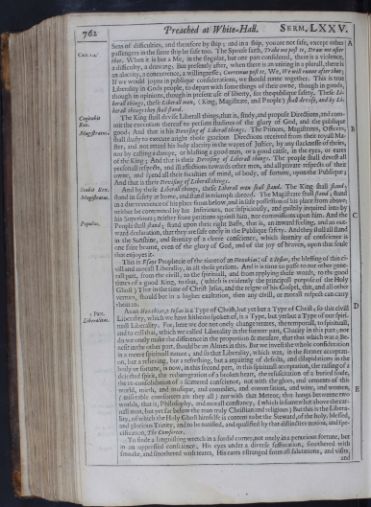 762
Preached at White-Hall.
Serm. LXXV.
Seas of difficulties, and therefore by ship; and in a ship, you are not safe, except other
762
Preached at White-Hall.
Serm. LXXV.
Seas of difficulties, and therefore by ship; and in a ship, you are not safe, except other
passengers in the same ship be safe too.Cant. 1.4. The Spouse saith, Trahe me post te, Draw me after
thee. When it is but a Me, in the singular, but one part considered, there is a violence,
a difficulty, a drawing; But presently after, when there is an uniting in a plurall, there is
an alacrity, a concurrence, a willingnesse; Curremus post te, We, We will runne after thee;
If we would joyne in publique considerations, we should runne together. This is true
Liberality in Gods people, to depart with some things of their owne, though in goods,
though in opinions, though in present use of liberty, for the publique safety. These Li-
berall things, these Liberall men, (King, Magistrate, and People) shall devise, and by Li-
berall things they shall stand.
The King shall devise Liberall things, Cogitabit
Rex. that is, study, and propose Directions, and com-
mit the execution thereof to persons studious of the glory of God, and the publique
good;Magistratus. And that is his Devising of Liberall things. The Princes, Magistrates, Officers,
shall study to execute aright those gracious Directions received from their royall Ma-
ster, and not retard his holy alacrity in the wayes of Justice, by any slacknesse of theirs,
nor by casting a dampe, or blasting a good man, or a good cause, in the eyes, or eares
of the King; And that is their Devising of Liberall things. The people shall devest all
personall respects, and ill affections towards other men, and all private respects of their
owne, and spend all their faculties of mind, of body, of fortune, upon the Publique;
And that is their Devising of Liberall things.
And by these Liberall things, Stabit Rex. these Liberall men shall stand. The King shall stand;
stand in safety at home, and stand in triumph abroad. The Magistrate shall stand; stand Magistratus.
in a due reverence of his place from below, and in safe possession of his place from above;
neither be contemned by his Inferiours, nor suspiciously, and guiltily inquired into by
his Superiours; neither feare petitions against him, nor commissions upon him. And the
People shall stand; stand upon their right Basis, that is, an inward feeling, and an Populus. out-
ward declaration, that they are safe onely in the Publique safety. And they shall all stand
in the Sunshine, and serenity of a cleere conscience, which serenity of conscience is
one faire beame, even of the glory of God, and of the joy of heaven, upon that soule
that enjoyes it.
This is Esays Prophecie of the times of an Hezekias, of a Iosias, the blessing of this ci-
vill and morall Liberality, in all these persons. And it is time to passe to our other gene-
rall part, from the civill, to the spirituall, and from applying these words, to the good
times of a good King, to that, (which is evidently the principall purpose of the Holy
Ghost) That in the time of Christ Jesus, and the reigne of his Gospel, this, and all other
vertues, should bee in a higher exaltation, then any civill, or morall respect can carry
them to.
As an Hezekias, 2 Part. a Iosias is a Type of Christ, but yet but a Type of Christ; so this civill
Liberality, which we have hitherto spoken of, is a Type, but yet but a Type of our Liberalitas. spiri-
tuall Liberality. For, here we doe not onely change termes, the temporall, to spirituall,
and to call that, which we called Liberality in the former part, Charity in this part; nor
do we onely make the difference in the proportion & measure, that that which was a Be-
nefit in the other part, should be an Almes in this. But we invest the whole consideration
in a meere spirituall nature; and so that Liberality, which was, in the former acceptati-
on, but a relieving, but a refreshing, but a repairing of defects, and dilapidations in the
body or fortune, is now, in this second part, in this spirituall acceptation, the raising of a
dejected spirit, the redintegration of a broken heart, the resuscitation of a buried soule,
the re-consolidation of a scattered conscience, not with the glues, and cements of this
world, mirth, and musique, and comedies, and conversation, and wine, and women,
(miserable comforters are they all) nor with that Meteor, that hangs betweene two
worlds, that is, Philosophy, and morall constancy, (which is somewhat above the car-
nall man, but yet far below the man truly Christian and religious) But this is the Libera-
lity, of which the Holy Ghost himselfe is content to be the Steward, of the holy, blessed,
and glorious Trinity, and to be notified, and qualified by that distinctive notion, and spe-
cification, The Comforter.
To finde a languishing wretch in a sordid corner, not onely in a penurious fortune, but
in an oppressed conscience, His eyes under a diverse suffocation, smothered with
smoake, and smothered with teares, His eares estranged from all salutations, and visits, and
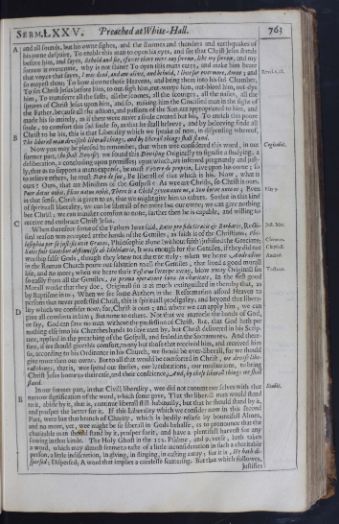 Serm. LXXV.
Preached at White-Hall.
763
and all sounds, but his owne sighes, and the stormes and thunders and earthquakes of
Serm. LXXV.
Preached at White-Hall.
763
and all sounds, but his owne sighes, and the stormes and thunders and earthquakes of
his owne despaire, To enable this man to open his eyes, and see that Christ Jesus stands
before him, and sayes, Behold and see, if ever there were any sorrow, like my sorrow, and my
sorrow is overcome, why is not thine? To open this mans eares, and make him heare
that voyce that sayes, I was dead, and am alive, and behold, I live for evermore, Amen;Revel. 1.18. and
so mayest thou; To bow downe those Heavens, and bring them into his sad Chamber,
To set Christ Jesus before him, to out-sigh him, out-weepe him, out-bleed him, out-dye
him, To transferre all the fasts, all the scornes, all the scourges, all the nailes, all the
speares of Christ Jesus upon him, and so, making him the Crucified man in the sight of
the Father, because all the actions, and passions of the Son, are appropriated to him, and
made his so intirely, as if there were never a soule created but his, To enrich this poore
soule, to comfort this sad soule so, as that he shall beleeve, and by beleeving finde all
Christ to be his, this is that Liberality which we speake of now, in dispensing whereof,
The liberall man deviseth liberall things, and by liberall things shall stand.
Now you may be pleased to remember, that when wee considered this word, Cogitabit. in our
former part, (he shall Devise) we found this Devising Originally to signifie a studying, a
deliberation, a concluding upon premisses; upon which, we inferred pregnantly and just-
ly, that as to support a mans expense, he must Vivere de proprio, Live upon his owne; so
to relieve others, he must Dare de suo, Be liberall of that which is his. Now, what is
ours? Ours, that are Ministers of the Gospell? As wee are Christs, so Christ is ours.
Puer datus nobis, filius natus nobis, There is a Child given unto us, a Son borne unto us;Esay 9. Even
in that sense, Christ is given to us, that we might give him to others. So that in this kind
of spirituall liberality, we can be liberall of no more but our owne; we can give nothing
but Christ; we can minister comfort to none, farther then he is capable, and willing to
receive and embrace Christ Jesus.
When therefore some of the Fathers have said, Ratio pro fide Græcis & Barbaris, Just. Mar. Recti-
fied reason was accepted at the hands of the Gentiles, as faith is of the Christians; Phi-
losophia per se justificavit Græcos, Clemens. Philosophie alone (without faith) justified the Grecians;
Satis fuit Gentibus abstinuisse ab Idololatria, It was enough for the Gentiles, Chrysost. if they did not
worship false Gods, though they knew not the true truly;Andrad. when we heare Andradius
in the Roman Church poure out salvation to all the Gentiles, that lived a good morall
life, and no more; when we heare their Tostatus sweepe away, Tostatus. blow away Originall sin
so easily from all the Gentiles, In prima operatione bona in charitate, In the first good
Morall worke that they doe, Originall sin is as much extinguished in them by that, as
by Baptisme in us; When we see some Authors in the Reformation afford Heaven to
persons that never professed Christ, this is spirituall prodigality, and beyond that libera-
lity which we consider now; for, Christ is ours; and where we can apply him, we can
give all comforts in him; But none to others. Not that we manacle the hands of God,
or say, God can save no man without the profession of Christ, But, that God hath put
nothing else into his Churches hands to save men by, but Christ delivered in his Scrip-
ture, applied in the preaching of the Gospell, and sealed in the Sacraments. And there-
fore, if we should give this comfort, to any but those that received him, and received him
so, according to his Ordinance in his Church, we should be over-liberall, for we should
give more then our owne. But to all that would be comforted in Christ, we devise libe-
rall things, that is, wee spend our studies, our lucubrations, our meditations, to bring
Christ Jesus home to their case, and their conscience, And, by these liberall things we shall
stand.
In our former part, in that Civill liberality, Stabit. wee did not content our selves with that
narrow signification of the word, which some gave, That the liberall man would stand
to it, abide by it, that is, continue liberall still habitually, but that he should stand by it,
and prosper the better for it. If this Liberality which we consider now in this second
Part, were but that branch of Charity, which is bodily reliefe by bountifull Almes,
and no more, yet, wee might be so liberall in Gods behalfe, as to pronounce that the
charitable man should stand by it, prosper for it, and have a plentifull harvest for any
sowing in that kinde. The Holy Ghost in the 112. Psalme, and 9. verse, hath taken
a word, which may almost seeme to taste of a little inconsideration in such a charitable
person, a little indiscretion, in giving, in flinging, in casting away; for it is, He hath di-
spersed; Dispersed; A word that implies a carelesse scattering. But that which followes, justifies
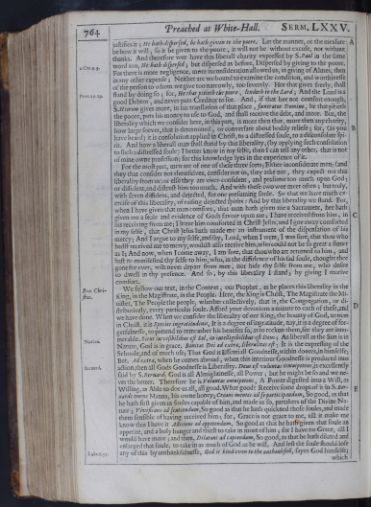 764
Preached at White-Hall.
Serm. LXXV.
justifies it; He hath dispersed, he hath given to the poore. Let the manner, or the measure
764
Preached at White-Hall.
Serm. LXXV.
justifies it; He hath dispersed, he hath given to the poore. Let the manner, or the measure
be how it will, so it be given to the poore, it will not be without excuse, not without
thanks. And therefore wee have this liberall charity expressed by S. Paul in the same
word too, 2 Cor. 9.9. He hath dispersed; but dispersed as before, Dispersed by giving to the poore.
For there is more negligence, more inconsideration allowed us, in giving of Almes, then
in any other expense; Neither are we bound to examine the condition, and worthinesse
of the person to whom we give too narrowly, too severely. Hee that gives freely, shall
stand by doing so;Prov. 17.19. for, He that pitieth the poore, lendeth to the Lord; And the Lord is a
good Debtor, and never puts Creditor to sue. And, if that bee not comfort enough,
S. Hierom gives more, in his translation of that place, fœneratur Domino, he that pitieth
the poore, puts his money to use to God, and shall receive the debt, and more. But, the
liberality which we consider here, in this part, is more then that, more then any charity,
how large soever, that is determined, or conversant about bodily reliefe; for, (as you
have heard) it is consolation applied in Christ, to a distressed soule, to a disconsolate spi-
rit. And how a liberall man shall stand by this liberality, (by applying such consolation
to such a distressed soule) I better know in my selfe, then I can tell any other, that is not
of mine owne profession; for this knowledge lyes in the experience of it.
For the most part, men are of one of these three sorts; Either inconsiderate men; (and
they that consider not themselves, consider not us, they aske not, they expect not this
liberality from us) or else they are over-confident, and presume too much upon God;
or diffident, and distrust him too much. And with these two wee meet often; but truly,
with seven diffident, and dejected, for one presuming soule. So that we have much ex-
ercise of this liberality, of raising dejected spirits: And by this liberality we stand. For,
when I have given that man comfort, that man hath given me a Sacrament, hee hath
given me a seale and evidence of Gods favour upon me; I have received from him, in
his receiving from me; I leave him comforted in Christ Jesus, and I goe away comforted
in my selfe, that Christ Jesus hath made me an instrument of the dispensation of his
mercy; And I argue to my selfe, and say, Lord, when I went, I was sure, that thou who
hadst received me to mercy, wouldst also receive him, who could not be so great a sinner
as I; And now, when I come away, I am sure, that thou who art returned to him, and
hast re-manifested thy selfe to him, who, in the diffidence of his sad soule, thought thee
gone for ever, wilt never depart from mee, nor hide thy selfe from me, who desire
to dwell in thy presence. And so, by this liberality I stand; by giving I receive
comfort.
We follow our text, Rex Chri-
stus. in the Context, our Prophet, as he places this liberality in the
King, in the Magistrate, in the People. Here, the King is Christ, The Magistrate the Mi-
nister, The People the people, whether collectively, that is, the Congregation, or di-
stributively, every particular soule. Afford your devotions a minute to each of these, and
we have done. When we consider the liberality of our King, the bounty of God, to man
in Christ, it is Species ingratitudinis, It is a degree of ingratitude, nay, it is a degree of for-
getfulnesse, to pretend to remember his benefits so, as to reckon them, for they are innu-
merable. Sicut in visibilibus est Sol, in intelligibilibus est Deus; As liberall as the Sun is inNazian.
Nature, God is in grace. Bonitas Dei ad extra, liberalitas est; It is the expressing of the
Schoole, and of much use; That God is Essentiall Goodnesse, within doores, in himselfe;
But, Ad extra, when he comes abroad, when this interiour Goodnesse is produced into
action, Bernard. then all Gods Goodnesse is Liberality. Deus est voluntas Omnipotens, is excellently
said by S. Bernard; God is all Almightinesse, all Power; but he might be so and we ne-
ver the better. Therefore he is Voluntas omnipotens, A Power digested into a Will, as
Willing, as Able to doe us all, all good. What good? Receive some drops of it in S. Ber-
nards owne Manna, his owne honey; Creans mentes ad se participandum, So good, as that
he hath first given us soules capable of him, and made us so, partakers of the Divine Na-
ture; Vivificans ad sentiendum, So good as that he hath quickned those soules, and made
them sensible of having received him; for, Grace is not grace to me, till it make me
know that I have it Alliciens ad appetendum, So good as that he hath given that soule an
appetite, and a holy hunger and thirst to take in more of him; for I have no Grace, till I
would have more; and then, Dilatans ad capiendum, So good, as that he hath dilated and
enlarged that soule, to take in as much of God as he will. And lest the soule should lose
any of this by unthankfulnesse, Luke 6.35. God is kind even to the unthankfull, sayes God himselfe; which
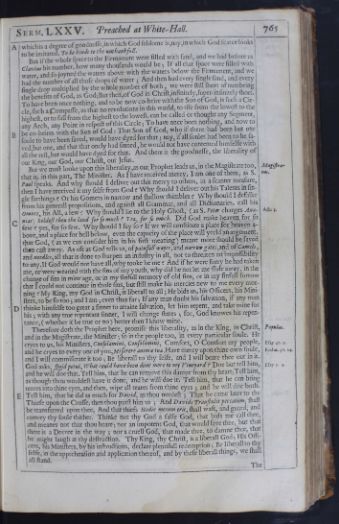 Serm. LXXV.
Preached at White-Hall.
765
which is a degree of goodnesse, in which God seldome is, nay, in which God scarce looks
Serm. LXXV.
Preached at White-Hall.
765
which is a degree of goodnesse, in which God seldome is, nay, in which God scarce looks
to be imitated, To be kinde to the unthankfull.
But if the whole space to the Firmament were filled with sand, and we had before us
Clavius his number, how many thousands would be; If all that space were filled with
water, and so joyned the waters above with the waters below the Firmament, and we
had the number of all those drops of water; And then had every single sand, and every
single drop multiplied by the whole number of both, we were still short of numbring
the benefits of God, as God; But then, of God in Christ, infinitely, super-infinitely short.
To have been once nothing, and to be now co-heire with the Son of God, is such a Cir-
cle, such a Compasse, as that no revolutions in this world, to rise from the lowest to the
highest, or to fall from the highest to the lowest, can be called or thought any Segment,
any Arch, any Point in respect of this Circle; To have once been nothing, and now to
be co-heires with the Son of God: That Son of God; who if there had been but one
soule to have been saved, would have dyed for that; nay, if all soules had been to be sa-
ved, but one, and that that onely had sinned, he would not have contented himselfe with
all the rest, but would have dyed for that. And there is the goodnesse, the liberality of
our King, our God, our Christ, our Jesus.
But we must looke upon this liberality, as our Prophet leads us, in the Magistrate too, Magistra-
tus.
that is, in this part, The Minister. As I have received mercy, I am one of them, as S.
Paul speaks. And why should I deliver out this mercy to others, in a scanter measure,
then I have received it my selfe from God? Why should I deliver out his Talents in sin-
gle farthings? Or his Gomers in narrow and shallow thimbles? Why should I defalke
from his generall propositions, and against all Grammar, and all Dictionaries, call his
Omnes, his All, a few? Why should I lie to the Holy Ghost, Acts 5. (as S. Peter charges Ana-
nias) Soldest thou the land for so much? Yea, for so much. Did God make heaven for so
few? yes, for so few. Why should I say so? If we will constitute a place for heaven a-
bove, and a place for hell below, even the capacity of the place will yeeld an argument,
that God, (as we can consider him in his first meaning) meant more should be saved
then cast away. As oft as God tells us, of painfull wayes, and narrow gates, and of Camels,
and needles, all that is done to sharpen an industry in all, not to threaten an impossibility
to any. If God would not have all, why tooke he me? And if he were sorry he had taken
me, or were wearied with the sins of my youth, why did he not let me slide away, in the
change of sins in mine age, or in my sinfull memory of old sins, or in my sinfull sorrow
that I could not continue in those sins, but still make his mercies new to me every mor-
ning? My King, my God in Christ, is liberall to all; He bids us, his Officers, his Mini-
sters, to be so too; and I am; even thus far; If any man doubt his salvation, if any man
thinke himselfe too great a sinner to attaine salvation, let him repent, and take mine for
his; with any true repentant sinner, I will change states; for, God knowes his repen-
tance, (whether it be true or no) better then I know mine.
Therefore doth the Prophet here, promise this liberality, as in the King, in Christ, Populus.
and in the Magistrate, the Minister; so in the people too, in every particular soule. He
cryes to us, his Ministers, Consolamini, Consolamini, Comfort, O Comfort my people, Esay 40.1.
and he cryes to every one of you, Miserere animæ tuæ, Have mercy upon thine own soule, Ecclus. 30.24.
and I will commiserate it too; Be liberall to thy selfe, and I will beare thee out in it.
God asks, Quid potui, What could have been done more to my Vineyard? Doe but tell him, Esay 5.4.
and he will doe that. Tell him, that he can remove this dampe from thy heart; Tell him,
as though thou wouldest have it done, and he will doe it. Tell him, that he can bring
teares into thine eyes, and then, wipe all teares from thine eyes; and he will doe both.
Tell him, that he did as much for David, as thou needest; That he came later to the
Thiefe upon the Crosse, then thou putst him to; And Davids Transtulit peccatum, shall
be transferred upon thee, And that thiefs Hodie mecum eris, shall waft, and guard, and
convey thy soule thither. Thinke not thy God a false God, that bids me call thee,
and meanes not that thou heare; nor an impotent God, that would save thee, but that
there is a Decree in the way; nor a cruell God, that made thee, to damne thee, that
he might laugh at thy destruction. Thy King, thy Christ, is a liberall God; His Offi-
cers, his Ministers, by his instructions, declare plentifull redemption; Be liberall to thy
selfe, in the apprehension and application thereof, and by these liberall things, we shall
all stand. The
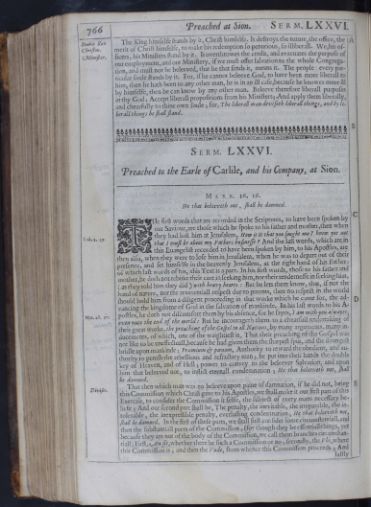 766
Preached at Sion.
Serm. LXXVI.
766
Preached at Sion.
Serm. LXXVI.
The King himselfe stands by it, Stabit Rex
Christus.
Minister. Christ himselfe. It destroys the nature, the office, the
merit of Christ himselfe, to make his redemption so penurious, so illiberall. We, his of-
ficers, his Ministers stand by it. It overthrowes the credit, and evacuates the purpose of
our employment, and our Ministery, if we must offer salvation to the whole Congrega-
tion, and must not be beleeved, that he that sends it, means it. The people, every par-
ticular soule stands by it. For, if he cannot beleeve God, to have been more liberall to
him, then he hath been to any other man, he is in an ill case, because he knowes more ill
by himselfe, then he can know by any other man. Beleeve therefore liberall purposes
in thy God; Accept liberall propositions from his Ministers; And apply them liberally,
and chearfully to thine own soule; for, The liberall man deviseth liberall things, and by li-
berall things he shall stand.
Serm. LXXVI.
Preached to the Earle of Carlile, and his Company, at Sion.
Mark. 16.16.
He that beleeveth not, shall be damned.
THeThe first words that are recorded in the Scriptures, to have been spoken by
our Saviour, are those which he spoke to his father and mother, then when
they had lost him at Jerusalem, Luk. 2.49. How is it that you sought me? knew yee not
that I must be about my Fathers businesse? And the last words, which are in
this Euangelist recorded to have been spoken by him, to his Apostles, are
then also, when they were to lose him in Jerusalem, when he was to depart out of their
presence, and set himselfe in the heavenly Jerusalem, at the right hand of his Father:
of which last words of his, this Text is a part. In his first words, those to his father and
mother, he doth not rebuke their care in seeking him, nor their tendernesse in seeking him,
(as they told him they did) with heavy hearts: But he lets them know, that, if not the
band of nature, nor the reverentiall respect due to parents, then no respect in the world
should hold him from a diligent proceeding in that worke which he came for, the ad-
vancing the kingdome of God in the salvation of mankinde. In his last words to his A-
postles, he doth not discomfort them by his absence, Mat. 28.20. for he sayes, I am with you alwayes,
even unto the end of the world: But he incourageth them to a chearfull undertaking of
their great worke, the preaching of the Gospel to all Nations, by many arguments, many in-
ducements, of which, one of the waightiest is, That their preaching of the Gospel was
not like to be uneffectuall, because he had given them the sharpest spur, and the strongest
bridle upon mankinde; Præmium & pœnam, Authority to reward the obedient, and au-
thority to punish the rebellious and refractary man; he put into their hands the double
key of Heaven, and of Hell; power to convey to the beleever Salvation, and upon
him that beleeved not, to inflict eternall condemnation; He that beleeveth not, shall
be damned.
That then which man was to beleeve upon paine of damnation, Divisio. if he did not, being
this Commission which Christ gave to his Apostles, we shall make it our first part of this
Exercise, to consider the Commission it selfe, the subject of every mans necessary be-
liefe; And our second part shall be, The penalty, the inevitable, the irreparable, the in-
tolerable, the inexpressible penalty, everlasting condemnation, He that beleeveth not,
shall be damned. In the first of these parts, we shall first consider some circumstantiall, and
then the substantiall parts of the Commission; (for though they be essentiall things, yet
because they are not of the body of the Commission, we call them branches circumstan-
tiall) First, An sit, whether there be such a Commission or no; secondly, the Vbi, where
this Commission is; and then the Vnde, from whence this Commission proceeds; And lastly
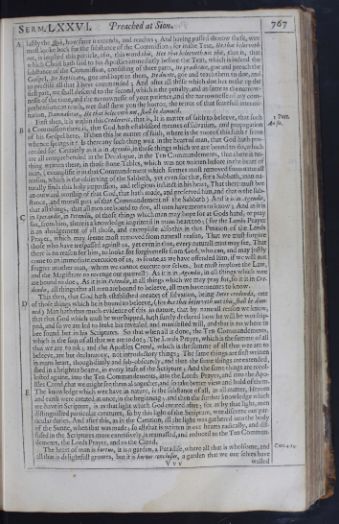 Serm. LXXVI.
Preached at Sion.
767
lastly the Quò, how farre it extends, and reaches; And having passed thorow these, wee
Serm. LXXVI.
Preached at Sion.
767
lastly the Quò, how farre it extends, and reaches; And having passed thorow these, wee
must looke back for the substance of the Commission; for in the Text, He that beleeveth
not, is implied this particle, this, this word this, Hee that beleeveth not this, that is, that
which Christ hath said to his Apostles immediatly before the Text, which is indeed the
substance of the Commission, consisting of three parts, Ite prædicate, goe and preach the
Gospel, Ite Baptizate, goe and baptize them, Ite docete, goe and teach them to doe, and
to practise all that I have commanded; And after all these which doe but make up the
first part, we shall descend to the second, which is the penalty; and as farre as the narrow-
nesse of the time, and the narrownesse of your patience, and the narrownesse of my com-
prehension can reach, wee shall shew you the horror, the terror of that fearefull intermi-
nation, Damnabitur, He that beleeveth not, shall be damned.
First then, it is within this Credererit, that is, It is matter of faith to beleeve, 1 Part. that such
a Commission there is, that God hath established meanes of salvation, and propagation An sit.
of his Gospel here. If then this be matter of faith, where is the root of this faith? from
whence springs it? Is there any such thing writ in the heart of man, that God hath pro-
ceeded so? Certainly as it is in Agendis, in those things which we are bound to do, which
are all comprehended in the Decalogue, in the Ten Commandements, that there is no-
thing written there, in those stone Tables, which was not written before in the heart of
man, (exemplifie it in that Commandement which seemes most removed from naturall
reason, which is the observing of the Sabbath, yet even for that, for a Sabbath, man na-
turally finds this holy impression, and religious instinct in his heart, That there must bee
an outward worship of that God, that hath made, and preserved him, and that is the sub-
stance, and morall part of that Commandement of the Sabbath) And it is in Agendis,
that all things, that all men are bound to doe, all men have means to know; And as it is
in Sperandis, in Petendis, of those things which man may hope for at Gods hand, or pray
for, from him, there is a knowledge imprinted in mans heart too; (for the Lords Prayer
is an abridgement of all those, and exemplifie also this in that Petition of the Lords
Prayer, which may seeme most removed from naturall reason, That we must forgive
those who have trespassed against us, yet even in that, every naturall man may see, That
there is no reason for him, to looke for forgivenesse from God, who can, and may justly
come to an immediate execution of us, as soone as we have offended him, if we will not
forgive another man, whom we cannot execute our selves, but must implore the Law,
and the Magistrate to revenge our quarrell) As it is in Agendis, in all things which wee
are bound to doe; As it is in Petendis, in all things which we may pray for, so it is in Cre-
dendis, all things that all men are bound to beleeve, all men have meanes to know.
This then, that God hath established meanes of salvation, being Inter credenda, one
of those things which he is bound to beleeve, (for hee that beleeveth not this, shall be dam-
ned) Man hath thus much evidence of this in nature, that by naturall reason we know,
that that God which must be worshipped, hath surely declared how he will be worship-
ped, and so we are led to seeke his revealed and manifested will, and that is no where to
bee found but in his Scriptures. So that when all is done, the Ten Commandements,
which is the sum of all that we are to doe; The Lords Prayer, which is the summe of all
that we are to ask; and the Apostles Creed, which is the summe of all that wee are to
beleeve, are but declaratory, not introductory things; The same things are first written
in mans heart, though dimly and sub-obscurely, and then the same things are extended,
shed in a brighter beame, in every leafe of the Scripture; And the same things are recol-
lected againe, into the Ten Commandements, into the Lords Prayer, and into the Apo-
stles Creed, that we might see them alall together, and so take better view and hold of them.
The knowledge which wee have in nature, is the substance of all, as all matter, Heaven
and earth were created at once, in the beginning; and then the further knowledge which
we have in Scripture, is as that light which God created after; for as by that light, men
distinguished particular creatures, so by this light of the Scripture, wee discerne our par-
ticular duties. And after this, as in the Creation, all the light was gathered into the body
of the Sunne, when that was made; so all that is written in our hearts radically, and dif-
fused in the Scriptures more extensively, is reamassed, and reduced to the Ten Comman-
dements, the Lords Prayer, and to the Creed.
The heart of man is hortus, it is a garden, a Paradise, where all that is wholsome, Cant. 4.12. and
all that is delightfull growes, but it is hortus conclusus, a garden that we our selves have Vvv walled
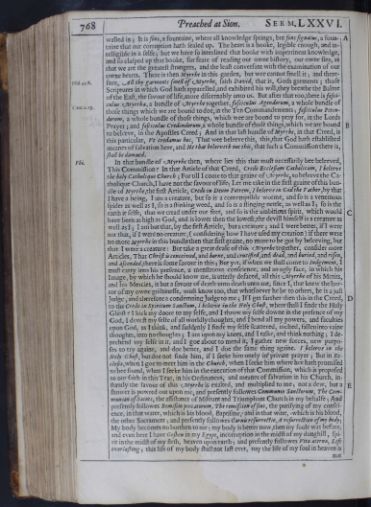 768
Preached at Sion.
Serm. LXXVI.
walled in; It is fons, a fountaine, where all knowledge springs, bntbut fons signatus, a foun-
768
Preached at Sion.
Serm. LXXVI.
walled in; It is fons, a fountaine, where all knowledge springs, bntbut fons signatus, a foun-taine that our corruption hath sealed up. The heart is a booke, legible enough, and in-
telligible in it selfe; but we have so interlined that booke with impertinent knowledge,
and so clasped up that booke, for feare of reading our owne history, our owne sins, as
that we are the greatest strangers, and the least conversant with the examination of our
owne hearts. There is then Myrrhe in this garden, but wee cannot smell it; and there-
fore, All thy garments smell of Myrrhe, Psal. 45.8. saith David, that is, Gods garments; those
Scriptures in which God hath apparelled, and exhibited his will, they breathe the Balme
of the East, the savour of life, more discernably unto us. But after that too, there is fasci-
culus Myrrhæ, Cant. 1.13. a bundle of Myrrhe together, fasciculus Agendorum, a whole bundle of
those things which we are bound to doe, in the Ten Commandements; fasciculus Peten-
dorum, a whole bundle of those things, which wee are bound to pray for, in the Lords
Prayer; and fasciculus Credendorum, a whole bundle of those things, which we are bound
to beleeve, in the Apostles Creed; And in that last bundle of Myrrhe, in that Creed, is
this particular, Vt credamus hoc, That wee beleeve this, this, that God hath established
meanes of salvation here, and He that beleevetbbeleeveth not this, that such a Commission there is,
shall be damned.
In that bundle of Myrrhe then, Vbi. where lies this that must necessarily bee beleeved,
This Commission? In that Article of that Creed, Credo Ecclesiam Catholicam, I beleeve
the holy Catholique Church; For till I come to that graine of Myrrhe, to beleeve the Ca-
tholique Church, I have not the savour of life; Let me take in the first graine of this bun-
dle of Myrrhe, the first Article, Credo in Deum Patrem, I beleeve in God the Father, by that
I have a being, I am a creature, but so is a contemptible worme, and so is a venemous
spider as well as I, so is a stinking weed, and so is a stinging nettle, as well as I; so is the
earth it selfe, that we tread under our feet, and so is the ambitious spirit, which would
have been as high as God, and is lower then the lowest, the devill himself is a creature as
well as I; I am but that, by the first Article, but a creature; and I were better, if I were
not that, if I were no creature, (considering how I have used my creation) if there were
no more Myrrhe in this bundle then that first graine, no more to be got by beleeving, but
that I were a creature: But take a great deale of this Myrrhe together, consider more
Articles, That Christ is conceived, and borne, and crucified, and dead, and buried, and risen,
and ascended, there is some savour in this; But yet, if when we shall come to Iudgement, I
must carry into his presence, a menstruous conscience, and an ugly face, in which his
Image, by which he should know me, is utterly defaced, all this Myrrhe of his Merits,
and his Mercies, is but a savour of death unto death unto me, since I, that knew the hor-
ror of my owne guiltinesse, must know too, that whatsoever he be to others, he is a just
Judge, and therefore a condemning Judge to me; If I get farther then this in the Creed,
to the Credo in Spiritum Sanctum, I beleeve in the Holy Ghost, where shall I finde the Holy
Ghost? I lock my doore to my selfe, and I throw my selfe downe in the presence of my
God, I devest my selfe of all worldly thoughts, and I bend all my powers, and faculties
upon God, as I think, and suddenly I finde my selfe scattered, melted, fallen into vaine
thoughts, into no thoughts; I am upon my knees, and I talke, and think nothing; I de-
prehend my selfe in it, and I goe about to mend it, I gather new forces, new purpo-
ses to try againe, and doe better, and I doe the same thing againe. I beleeve in the
Holy Ghost, but doe not finde him, if I seeke him onely in private prayer; But in Ec-
clesia, when I goe to meet him in the Church, when I seeke him where hee hath promised
to bee found, when I seeke him in the execution of that Commission, which is proposed
to our faith in this Text, in his Ordinances, and meanes of salvation in his Church, in-
stantly the savour of this Myrrhe is exalted, and multiplied to me; not a dew, but a
shower is powred out upon me, and presently followes Communio Sanctorum, The Com-
munion of Saints, the assistance of Militant and Triumphant Church in my behalfe; And
presently followes Remissio peccatorum, The remission of sins, the purifying of my consci-
ence, in that water, which is his blood, Baptisme, and in that wine, which is his blood,
the other Sacrament; and presently followes Carnis resurrectio, A resurrection of my body;
My body becomes no burthen to me; my body is better now, then my soule was before;
and even here I have Goshen in my Egypt, incorruption in the midst of my dunghill, spi-
rit in the midst of my flesh, heaven upon earth; and presently followes Vita æterna, Life
everlasting; this life of my body shall not last ever, nay the life of my soul in heaven is not
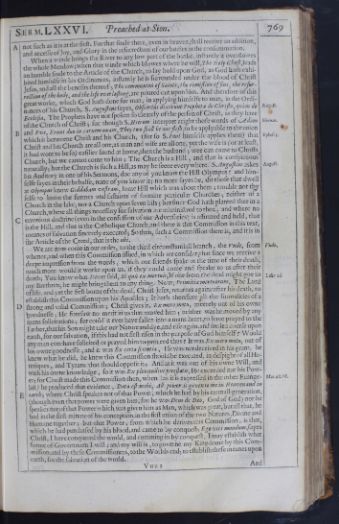 Serm. LXXVI.
Preached at Sion.
769
not such as it is at the first. For that soule there, even in heaven, shall receive an addition,
Serm. LXXVI.
Preached at Sion.
769
not such as it is at the first. For that soule there, even in heaven, shall receive an addition,
and accesse of Joy, and Glory in the resurrection of our bodies in the consummation.
When a winde brings the River to any low part of the banke, instantly it overflowes
the whole Meadow; when that winde which blowes where he will, The Holy Ghost, leads
an humble soule to the Article of the Church, to lay hold upon God, as God hath exhi-
bited himselfe in his Ordinances, instantly he is surrounded under the blood of Christ
Jesus, and all the benefits thereof; The communion of Saints, the remission of sins, the resur-
rection of the body, and the life everlasting, are poured out upon him. And therefore of this
great worke, which God hath done for man, in applying himselfe to man, in the Ordi-
nances of his Church, S. Augustine sayes, August. Obscuriùs dixerunt Prophetæ de Christo, quàm de
Ecclesia, The Prophets have not spoken so clearely of the person of Christ, as they have
of the Church of Christ;Hieron. for though S. Hierom interpret aright those words of Adam
and Eve, Erunt duo in carnem unam, They two shall be one flesh, to be applyable to the union
which is betweene Christ and his Church, Ephes. 5. (for so S. Paul himselfe applies them) that
Christ and his Church are all one, as man and wife are all one, yet the wife is (or at least,
it had wont to be so) easilier found at home, then the husband; wee can come to Christs
Church, but we cannot come to him; The Church is a Hill, and that is conspicuous
naturally; but the Church is such a Hill, as may be seene every where.August. S. Augustine askes
his Auditory in one of his Sermons, doe any of you know the Hill Olympus? and him-
selfe sayes in their behalfe, none of you know it; no more sayes he, do those that dwell
at Olympus know Giddabam vestram, some Hill which was about them; trouble not thy
selfe to know the formes and fashions of forraine particular Churches; neither of a
Church in the lake, nor a Church upon seven hils; but since God hath planted thee in a
Church, where all things necessary for salvation are administred to thee, and where no
erronious doctrine (even in the confession of our Adversaries) is affirmed and held, that
is the Hill, and that is the Catholique Church, and there is this Commission in this text,
meanes of salvation sincerely executed; So then, such a Commission there is, and it is in
the Article of the Creed, that is the ubi.
We are now come in our order, to the third circumstantiall branch, the Vnde, Vnde. from
whence, and when this Commission issued, in which we consider, that since we receive a
deepe impression from the words, which our friends spake at the time of their death,
much more would it worke upon us, if they could come and speake to us after their
death; You know what Dives said, Si quis ex mortuis, Luke 16. If one from the dead might goe to
my Brethren, he might bring them to any thing. Now, Primitiæ mortuorum, The Lord
of life, and yet the first borne of the dead, Christ Jesus, returnes againe after his death, to
establish this Commission upon his Apostles; It hath therefore all the formalities of a
strong and valid Commission; Christ gives it, Ex mero motu, meerely out of his owne
goodnesse; He foresaw no merit in us that moved him; neither was he moved by any
mans solicitations; for could it ever have fallen into a mans heart, to have prayed to the
Father, that his Son might take our Nature and dye, and rise again, and settle a course upon
earth, for our salvation, if this had not first risen in the purpose of God himself? Would
any man ever have solicited or prayed him to proceed thus? It was Ex mero motu, out of
his owne goodnesse, and it was Ex certa scientia, He was not deceived in his grant, he
knew what he did, he knew this Commission should be executed, in despight of all He-
retiques, and Tyrans that should oppose it; And as it was out of his owne Will, and
with his owne knowledge, so it was Ex plenitudine potestatis, He exceeded not his Pow-
er; for Christ made this Commission then, Mat. 28.18. when (as it is expressed in the other Euange-
list) he produced that evidence, Data est mihi, All power is given to me in Heaven and in
earth; where Christ speakes not of that Power, which he had by his eternall generation,
(though even that power were given him, for he was Deus de Deo, God of God) nor he
speakes not of that Power which was given him as Man, which was great, but all that, he
had in the first minute of his conception, in the first union of the two Natures, Divine and
Humane together; but that Power, from which he derives this Commission, is that,
which he had purchased by his blood, and came to by conquest; Ego vici mundum, sayes
Christ, I have conquered the world, and comming in by conquest, I may establish what
forme of Government I will; and my will is, to governe my Kingdome by this Com-
mission; and by these Commissioners, to the Worlds end; to establish these meanes upon
earth, for the salvation of the world. Vuu2 And
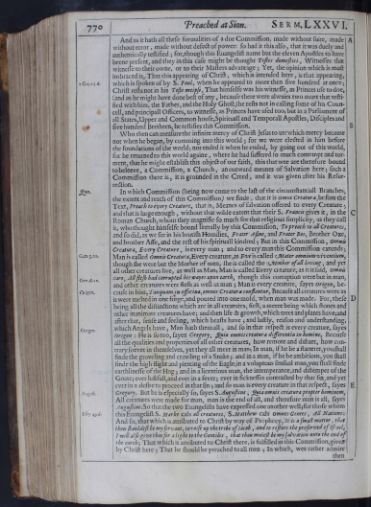 770
Preached at Sion.
Serm. LXXVI.
770
Preached at Sion.
Serm. LXXVI.
And as it hath all these formalities of a due Commission, made without suite, made
without error, made without defect of power: so had it this also, that it was duely and
authentically testified; for, though this Euangelist name but the eleven Apostles to have
beene present, and they in this case might be thought Testes domestici, Witnesses that
witnesse to their owne, or to their Masters advantage; Yet, the opinion which is most
imbraced is, That this appearing of Christ, which is intended here, is that appearing,
which is spoken of by S. Paul, 1 Cor. 15.6. when he appeared to more then five hundred at once;
Christ rests not in his Teste meipsome ipso, That himselfe was his witnesse, as Princes use to doe,
(and as he might have done best of any, because there were alwaies two more that testi-
fied with him, the Father, and the Holy Ghost) he rests not in calling some of his Coun-
cell, and principall Officers, to witnesse, as Princes have used too; but in a Parliament of
all States, Upper and Common house, Spirituall and Temporall Apostles, Disciples and
five hundred Brethren, he testifies this Commission.
Who then can measure the infinite mercy of Christ Jesus to us? which mercy became
not when he began, by comming into this world; for we were elected in him before
the foundations of the world; nor ended it when he ended, by going out of this world,
for he returned to this world againe, where he had suffered so much contempt and tor-
ment, that he might establish this object of our faith, this that wee are therefore bound
to beleeve, a Commission, a Church, an outward meanes of Salvation here; such a
Commission there is, it is grounded in the Creed, and it was given after his Resur-
rection.
In which Commission (being now come to the last of the circumstantiall Branches, Quo.
the extent and reach of this Commission) we finde, that it is Omni Creaturæ, before the
Text, Preach to every Creature, that is, Meanes of salvation offered to every Creature;
and that is large enough, without that wilde extent that their S. Francis gives it, in the
Roman Church, whom they magnifie so much for that religious simplicity, as they call
it, who thought himselfe bound literally by this Commission, To preach to all Creatures,
and so did, as we see in his brutish Homilies, Frater Asine, and Frater Bos, Brother Oxe,
and brother Asse, and the rest of his spirituall kindred; But in this Commission, Omnis
Creatura, Every Creature, is every man; and to every man this Commission extends;
Man is called Omnis Creatura, Gen. 3.20. Every creature, as Eve is called Mater omnium viventium,
though she were but the Mother of men, she is called the Mother of all living, and yet
all other creatures live, as well as Man; Man is called Every creature, as it is said, Omnis
caro, Gen. 6.12. All flesh had corrupted his wayes upon earth, though this corruption were but in man,
and other creatures were flesh as well as man; Man is every creature, sayes Origen, be-
cause in him, Origen. Tanquam in officina, omnes Creaturæ conflantur, Because all creatures were as
it were melted in one forge, and poured into one mold, when man was made. For, these
being all the distinctions which are in all creatures, first, a meere being which stones and
other inanimate creatures have; and then life & growth, which trees and plants have; and
after that, sense and feeling, which beasts have; and lastly, reason and understanding,
which Angels have, Gregor. Man hath them all; and so in that respect is every creature, sayes
Origen: He is so too, sayes Gregory, Quia omnis creaturæ differentia in homine, Because
all the qualities and properties of all other creatures, how remote and distant, how con-
trary soever in themselves, yet they all meet in man; In man, if he be a flatterer, you shall
finde the groveling and crawling of a Snake; and in a man, if he be ambitious, you shall
finde the high flight and piercing of the Eagle; in a voluptous sensual man, you shall finde
earthlinesse of the Hog; and in a licentious man, the intemperance, and distemper of the
Goate; ever lustfull, and ever in a fever; ever in sicknesses contracted by that sin, and yet
ever in a desire to proceed in that sin; and so man is every creature in that respect, sayes
Gregory.August. But he is especially so, sayes S. Augustine, Quia omnis creatura propter hominem,
All creatures were made for man, man is the end of all, and therefore man is all, sayes
Augustine. So that the two Euangelists have expressed one another well; for those whom
this Euangelist S. Marke cals all creatures, Esay 49.6. S. Matthew cals Omnes Gentes, All Nations;
And so, that which is attributed to Christ by way of Prophecy, It is a small matter, that
thou shouldest be my servant, to raise up the tribe of Iacob, and to restore the preserved of Israel,
I will also give thee for a light to the Gentiles, that thou maiest be my salvation unto the end of
the earth; That which is attributed to Christ there, is fulfilled in this Commission, given
by Christ here; That he should be preached to all men; In which, wee rather admire then
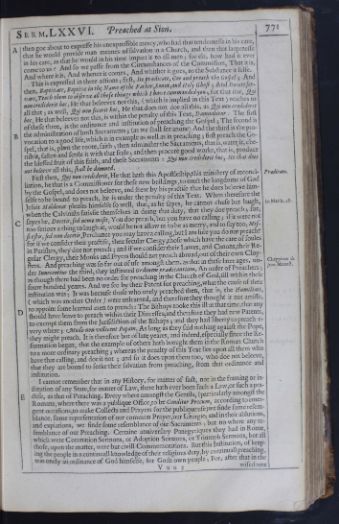 Serm. LXXVI.
Preached at Sion.
771
then goe about to expresse his unexpressible mercy, who had that tendernesse in his care,
Serm. LXXVI.
Preached at Sion.
771
then goe about to expresse his unexpressible mercy, who had that tendernesse in his care,
that he would provide man meanes of salvation in a Church, and then that largenesse
in his care, as that he would in his time impart it to all men; for els, how had it ever
come to us? And so we passe from the Circumstances of the Commission, That it is,
And where it is, And whence it comes, And whither it goes, to the Substance it selfe.
This is expressed in three actions; first, Ite prædicate, Goe and preach the Gospel; And
then, Baptizate, Baptize in the Name of the Father, Sonne, and Holy Ghost; And Docete ser-
vare, Teach them to observe all those things which I have commanded you; for that Hoc, Qui
non crediderit hoc, He that beleeves not this, (which is implied in this Text) reaches to
all that; as well, Qui non fecerit hoc, He that does not doe all this, as Qui non crediderit
hoc, He that beleeves not this, is within the penalty of this Text, Damnabitur: The first
of these three, is the ordinance and institution of preaching the Gospel; The second is
the administration of both Sacraments; (as we shall see anone) And the third is the pro-
vocation to a good life, which is in example as well as in preaching; first preach the Go-
spel, that is, plant the roote, faith; then administer the Sacraments, that is, water it, che-
rish it, fasten and settle it with that seale; and then procure good works, that is, produce
the blessed fruit of this faith, and these Sacraments: Qui non crediderit hoc, He that does
not beleeve all this, shall be damned.
First then, Qui non crediderit, He that hath this Apostleship, Prædicate. this ministery of reconci-
liation, he that is a Commissioner for these new buildings, to erect the kingdome of God
by the Gospel, and does not beleeve, and shew by his practise that he does beleeve him-
selfe to be bound to preach, he is under the penalty of this Text. When therefore the
Jesuit Maldonat pleases himselfe so well, that, as he sayes, he cannot chuse but laugh, In Matth. 28.
when the Calvinists satisfie themselves in doing that duty, that they doe preach; for,
sayes he, Docetis, sed nemo misit, You doe preach, but you have no calling; if it were not
too serious a thing to laugh at, would he not allow us to be as merry, and to say too, Mis-
si estis, sed non docetis, Perchance you may have a calling, but I am sure you do not preach?
for if we consider their practise, their secular Clergy, those which have the care of soules
in Parishes, they doe not preach; and if we consider their Lawes, and Canons, their Re-
gular Clergy, their Monks and Fryers should not preach abroad, out of their own Cloy-
sters. And preaching was so far out of use amongst them, as that in these later ages, Cheppinus de
Jure Monast. un-
der Innocentius the third, they instituted Ordinem prædicantium, An order of Preachers;
as though there had been no order for preaching in the Church of God, till within these
foure hundred yeares. And we see by their Patent for preaching, what the cause of their
institution was; It was because those who onely preached then, that is, the Humiliati,
(which was another Order) were unlearned, and therefore they thought it not amisse,
to appoint some learned men to preach: The Bishops tooke this ill at that time, that any
should have leave to preach within their Diocesses; and therefore they had new Patents,
to exempt them from the Jurisdiction of the Bishops; and they had liberty to preach e-
very where; Modò non vellicent Papam, As long as they said nothing against the Pope,
they might preach. It is therefore but of late yeares, and indeed, especially since the Re-
formation began, that the example of others hath brought them in the Roman Church
to a more ordinary preaching; whereas the penalty of this Text lies upon all them who
have that calling, and doe it not; and so it does upon them too, who doe not beleeve,
that they are bound to seeke their salvation from preaching, from that ordinance and
institution.
I cannot remember that in any History, for matter of fact, nor in the framing or in-
stitution of any State, for matter of Law, there hath ever been such a Law, or such a pra-
ctise, as that of Preaching. Every where amongst the Gentils, (particularly amongst the
Romans, where there was a publique Office, to be Conditor Precum, according to emer-
gent occasions, to make Collects and Prayers for the publique use) we finde some resem-
blance, some representation of our common Prayer, our Liturgie; and in their ablutions,
and expiations, we finde some resemblance of our Sacraments; but no where any re-
semblance of our Preaching. Certaine anniversary Panegyriques they had in Rome,
which were Coronation Sermons, or Adoption Sermons, or Triumph Sermons, but all
those, upon the matter, were but civill Commemorations. But this Institution, of keep-
ing the people in a continuall knowledge of their religious duty, by continuall preaching,
was onely an ordinance of God himselfe, for Gods own people; For, after that in the Vuu3 wisedome
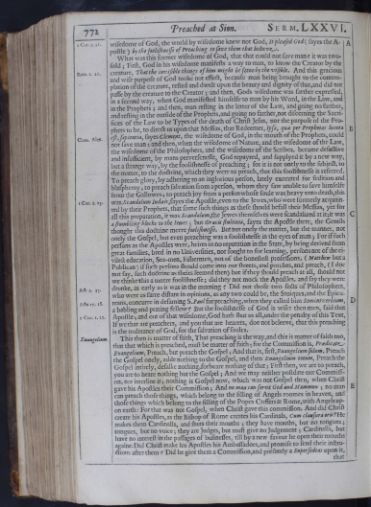 772
Preached at Sion.
Serm. LXXVI.
wisedome of God, 1 Cor. 1.21. the world by wisedome knew not God, It pleased God (sayes the A-
772
Preached at Sion.
Serm. LXXVI.
wisedome of God, 1 Cor. 1.21. the world by wisedome knew not God, It pleased God (sayes the A-postle) by the foolishnesse of Preaching to save them that beleeve.
What was this former wisedome of God, that that could not save man? it was two-
fold; First, God in his wisedome manifests a way to man, to know the Creator by the
creature, Rom. 1.20. That the invisible things of him might be seene by the visible. And this gracious
and wise purpose of God tooke not effect, because man being brought to the contem-
plation of the creature, rested and dwelt upon the beauty and dignity of that, and did not
passe by the creature to the Creator; and then, Gods wisedome was farther expressed,
in a second way, when God manifested himselfe to man by his Word, in the Law, and
in the Prophets; and then, man resting in the letter of the Law, and going no farther,
and resting in the outside of the Prophets, and going no farther, not discerning the Sacri-
fices of the Law to be Types of the death of Christ Jesus, nor the purpose of the Pro-
phets to be, to direct us upon that Messias, that Redeemer, Ipsa, quæ per Prophetas locuta
est, Clem. Alex. sapientia, sayes Clement, the wisedome of God, in the mouth of the Prophets, could
not save man; and then, when the wisedome of Nature, and the wisedome of the Law,
the wisedome of the Philosophers, and the wisedome of the Scribes, became defective
and insufficient, by mans perversenesse, God repayred, and supplyed it by a new way,
but a strange way, by the foolishnesse of preaching; for it is not onely to the subject, to
the matter, to the doctrine, which they were to preach, that this foolishnesse is referred.
To preach glory, by adhering to an inglorious person, lately executed for sedition and
blasphemy; to preach salvation from a person, whom they saw unable to save himselfe
from the Gallowes; to preach joy from a person whose soule was heavy unto death, this
was Scandalum Iudæis, 1 Cor. 1.23. sayes the Apostle, even to the Jewes, who were formerly acquain-
ted by their Prophets, that some such things as these should befall their Messias, yet for
all this preparation, it was Scandalum, the Jewes themselves were scandalized at it; it was
a stumbling blocke to the Iewes; but Græcis stultitia, sayes the Apostle there, the Gentils
thought this doctrine meere foolishnesse. But not onely the matter, but the manner, not
onely the Gospel, but even preaching was a foolishnesse in the eyes of man; For if such
persons as the Apostles were, heires to no reputation in the State, by being derived from
great families, bred in no Universities, nor sought to for learning, persons not of the ci-
vilest education, Sea-men, Fishermen, not of the honestest professions, (Matthew but a
Publican) if such persons should come into our streets, and porches, and preach, (I doe
not say, such doctrine as theirs seemed then) but if they should preach at all, should not
we thinke this a meere foolishnesse; did they not mock the Apostles, and say they were
drunke, Act. 2.13. as early as it was in the morning? Did not those two sects of Philosophers,
who were as farre distant in opinions, as any two could be, the Stoiques, and the Epicu-
reans, Acts 17.18. concurre in defaming S. Paul for preaching, when they called him SeminiverbiumSemini verbium,
a babling and prating fellow? But the foolishnesse of God is wiser then men, said that
Apostle;1 Cor. 1.25. and out of that wisedome, God hath shut us all, under the penalty of this Text,
If we that are peachers, and you that are hearers, doe not beleeve, that this preaching
is the ordinance of God, for the salvation of soules.
This then is matter of faith, Euangelium. That preaching is the way, and this is matter of faith too,
that that which is preached, must be matter of faith; for the Commission is, Prædicate
Euangelium, Preach, but preach the Gospel; And that is, first, Euangelium solum, Preach
the Gospel onely, adde nothing to the Gospel, and then Euangelium totum, Preach the
Gospel intirely, defalke nothing, forbeare nothing of that; First then, we are to preach,
you are to heare nothing but the Gospel; And we may neither postdate our Commissi-
on, nor interline it; nothing is Gospel now, which was not Gospel then, when Christ
gave his Apostles their Commission; And no man can serve God and Mammon; no man
can preach those things, which belong to the filling of Angels roomes in heaven, and
those things which belong to the filling of the Popes Coffers at Rome, with Angels up-
on earth: For that was not Gospel, when Christ gave this commission. And did Christ
create his Apostles, as the Bishop of Rome creates his Cardinals, Cum clausura oris? He
makes them Cardinalls, and shuts their mouths; they have mouths, but no tongues;
tongues, but no voice; they are Judges, but must give no Judgement; Cardinalls, but
have no interest in the passages of businesses, till by a new favour he open their mouths
againe: Did Christ make his Apostles his Ambassadors, and promise to send their instru-
ctions after them? Did he give them a Commission, and presently a Supersedeas upon it, that
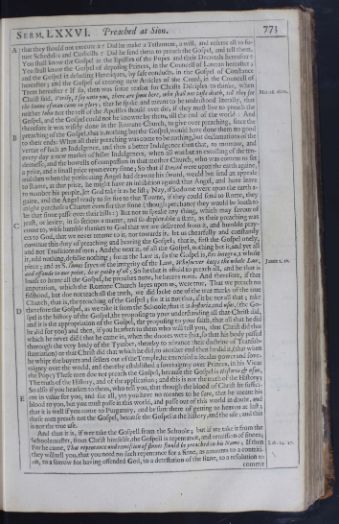 Serm. LXXVI.
Preached at Sion.
773
that they should not execute it? Did he make a Testament, a will, and referre all to fu-
Serm. LXXVI.
Preached at Sion.
773
that they should not execute it? Did he make a Testament, a will, and referre all to fu-ture Schedules and Codicills? Did he send them to preach the Gospel, and tell them,
You shall know the Gospel in the Epistles of the Popes and their Decretals hereafter?
You shall know the Gospel of deposing Princes, in the Councell of Lateran hereafter;
and the Gospel in deluding Heretiques, by safe conducts, in the Gospel of Constance
hereafter; and the Gospel of creating new Articles of the Creed, in the Councell of
Trent hereafter? If so, then was some reason for Christs Disciples to thinke, when
Christ said, Verily, I say unto you, there are some here, who shall not taste death, Mat. 16. ultim. till they see
the Sonne of man come in glory; that he spake and meant to be understood literally, that
neither Iohn nor the rest of the Apostles should ever die, if they must live to preach the
Gospel, and the Gospel could not be knowne by them, till the end of the world: And
therefore it was wisely done in the Romane Church, to give over preaching, since the
preaching of the Gospel, that is, nothing but the Gospel, would have done them no good
to their ends: When all their preaching was come to be nothing, but declamations of the
vertue of such an Indulgence, and then a better Indulgence then that, to morrow, and
every day a new market of fuller Indulgences, when all was but an extolling of the ten-
dernesse, and the bowells of compassion in that mother Church, who was content to set
a price, and a small price upon every sinne; So that if David were upon the earth againe,
and then when the persecuting Angel had drawne his sword, would but send an appeale
to Rome, at that price, he might have an inhibition against that Angel, and have leave
to number his people, let God take it as he list; Nay, if Sodome were upon the earth a-
gaine, and the Angel ready to set fire to that Towne, if they could send to Rome, they
might purchase a Charter even for that sinne (though perchance they would be loath to
let that sinne passe over their hills:) But not to speake any thing, which may savour of
jeast, or levity, in so serious a matter, and so deplorable a state, as their preaching was
come to, with humble thankes to God that we are delivered from it, and humble pray-
ers to God, that we never returne to it, nor towards it, let us chearfully and constantly
continue this duty of preaching and hearing the Gospel; that is, first the Gospel onely,
and not Traditions of men; And the next is, of all the Gospel, nothing but it, and yet all
it, add nothing, defalke nothing; for as the Law is, so the Gospel is, Res integra, a whole
piece; and as S. Iames sayes of the integrity of the Law, Whosoever keeps the whole Law, James 2.10.
and offends in one point, he is guilty of all; So he that is afraid to preach all, and he that is
loath to heare all the Gospel, he preaches none, he heares none. And therefore, if that
imputation, which the Romane Church layes upon us, were true, That we preach no
falshood, but doe not teach all the truth, we did lacke one of the true marks of the true
Church, that is, the preaching of the Gospel; for it is not that, if it be not all that; take
therefore the Gospel, as we take it from the Schoole, that it is historia, and usus, (the Go-
spel is the history of the Gospel, the proposing to your understanding all that Christ did,
and it is the appropriation of the Gospel, the proposing to your faith, that all that he did
he did for you) and then, if you hearken to them who will tell you, that Christ did that
which he never did (that he came in, when the doores were shut, so that his body passed
thorough the very body of the Tymber, thereby to advance their doctrine of Transub-
stantiation) or that Christ did that which he did, to another end then he did it, (that when
he whipt the buyers and sellers out of the Temple, he exercised a secular power and sove-
raignty over the world, and thereby established a soveraignty over Princes, in his Vicar
the Pope) These men doe not preach the Gospel, because the Gospel is Historia & usus,
The truth of the History, and of the application; and this is not the truth of the History;
So also if you hearken to them, who tell you, that though the blood of Christ be suffici-
ent in value for you, and for all, yet you have no meanes to be sure, that he meant his
blood to you, but you must passe in this world, and passe out of this world in doubt, and
that it is well if you come to Purgatory, and be sure there of getting to heaven at last;
these men preach not the Gospel, because the Gospel is the history, and the use; and this
is not the true use.
And thus it is, if wee take the Gospell from the Schoole; but if we take it from the
Schoolemaster, from Christ himselfe, the Gospell is repentance, and remission of sinnes;
For he came, That repentance and remission of sinnes should be preached in his Name;Luk. 24.47. If then
they will tell you, that you need no such repentance for a sinne, as amounts to a contriti-
on, to a sorrow for having offended God, to a detestation of the sinne, to a resolution to commit
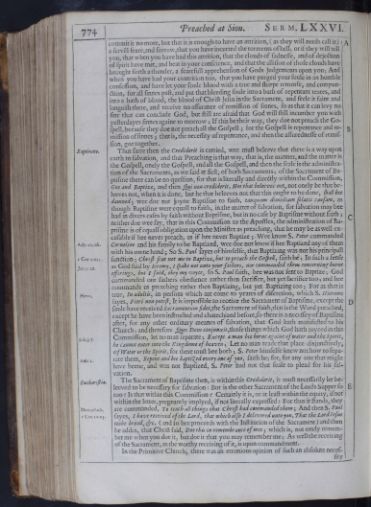 774
Preached at Sion.
Serm. LXXVI.
commit it no more, but that it is enough to have an attrition, (as they will needs call it)
774
Preached at Sion.
Serm. LXXVI.
commit it no more, but that it is enough to have an attrition, (as they will needs call it)
a servill feare, and sorrow, that you have incurred the torments of hell; or if they will tell
you, that when you have had this attrition, that the clouds of sadnesse, and of dejection
of spirit have met, and beat in your conscience, and that the allision of those clouds have
brought forth a thunder, a fearefull apprehension of Gods Judgements upon you; And
when you have had your contrition too, that you have purged your soule in an humble
confession, and have let your soule blood with a true and sharpe remorse, and compun-
ction, for all sinnes past, and put that bleeding soule into a bath of repentant teares, and
into a bath of blood, the blood of Christ Jesus in the Sacrament, and feele it faint and
languish there, and receive no assurance of remission of sinnes, so as that it can levy no
fine that can conclude God, but still are afraid that God will still incumber you with
yesterdayes sinnes againe to morrow; If this be their way, they doe not preach the Go-
spell, because they doe not preach all the Gospell; for the Gospell is repentance and re-
mission of sinnes; that is, the necessity of repentance, and then the assurednesse of remis-
sion, goe together.
Thus farre then the Crediderit is carried, Baptizate. wee must beleeve that there is a way upon
earth to salvation, and that Preaching is that way, that is, the manner, and the matter is
the Gospell, onely the Gospell, and all the Gospell, and then the seale is the administra-
tion of the Sacraments, as we said at first, of both Sacraments; of the Sacrament of Ba-
ptisme there can be no question, for that is literally and directly within the Commission,
Goe and Baptize, and then Qui non crediderit, Hee that beleeves not, not onely he that be-
leeves not, when it is done, but he that beleeves not that this ought to be done, shall bee
damned; wee doe not joyne Baptisme to faith, tanquam dimidiam solatii causam, as
though Baptisme were equall to faith, in the matter of salvation, for salvation may bee
had in divers cases by faith without Baptisme, but in no case by Baptisme without faith;
neither doe wee say, that in this Commission to the Apostles, the administration of Ba-
ptisme is of equall obligation upon the Minister as preaching, that he may be as well ex-
cusable if hee never preach, as if hee never Baptize; Wee know S. Peter commanded
Cornelius and his family to be Baptized, Acts 10. ult. wee doe not know if hee Baptized any of them
with his owne hand; So S. Paul sayes of himselfe, that Baptizing was not his principall
function;1 Cor. 1.17. Christ sent not me to Baptize, but to preach the Gospell, saith he; In such a sense
as God said by Ieremy, Jer. 7.22. I spake not unto your fathers, nor commanded them concerning burnt
offerings, but I said, obey my voyce, so S. Paul saith, hee was not sent to Baptize; God
commanded our fathers obedience rather then sacrifice, but yet sacrifice too; and hee
commands us preaching rather then Baptizing, but yet Baptizing too; For as that is
true, Hiero. In adultis, in persons which are come to yeares of discretion, which S. Hierome
sayes, Fieri non potest, It is impossible to receive the Sacrament of Baptisme, except the
soule have received Sacramentum fidei, the Sacrament of faith, that is the Word preached,
except he have been instructed and chatechized before, so there is a necessity of Baptisme
after, for any other ordinary meanes of salvation, that God hath manifested to his
Church; and therefore Quos Deus conjunxit, those things which God hath joyned in this
Commission, Ioh. 3.5. let no man separate; Except a man bee borne againe of water and the Spirit,
he cannot enter into the Kingdome of heaven; Let no man reade that place disjunctively,
Of Water or the Spirit, for there must bee both; S. Peter himselfe knew not how to sepa-
rate them, Acts 2. Repent and bee baptized every one of you, saith he; for, for any one that might
have beene, and was not Baptized, S. Peter had not that seale to plead for his sal-
vation.
The Sacrament of Baptisme then, Eucharistia. is within this Crediderit, it must necessarily be be-
leeved to be necessary for salvation: But is the other Sacrament of the Lords Supper so
too? Is that within this Commission? Certainly it is, or at least within the equity, if not
within the letter, pregnantly implyed, if not literally expressed: For thus it stands, they
are commanded, Matt. 28. ult. To teach all things that Christ had commanded them; And then S. Paul
sayes, I have received of the Lord, that which also I delivered unto you, That the Lord Iesus1 Cor. 11.23.
tooke bread, &c. (and so hee proceeds with the Institution of the Sacrament) and then
he addes, that Christ said, Doe this in remembrance of mee; which is, not onely remem-
ber me when you doe it, but doe it that you may remember me; As well the receiving
of the Sacrament, as the worthy receiving of it, is upon commandment.
In the Primitive Church, there was an erronious opinion of such an absolute neces-
sity
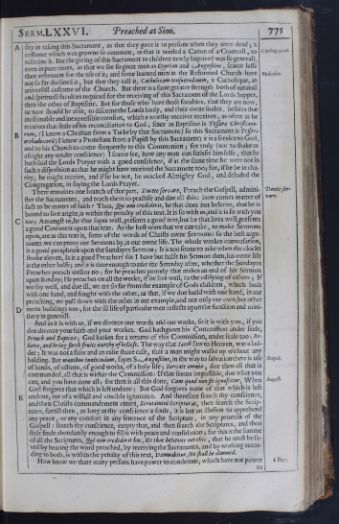 Serm. LXXVI.
Preached at Sion.
775
sity in taking this Sacrament, as that they gave it to persons when they were dead; a
Serm. LXXVI.
Preached at Sion.
775
sity in taking this Sacrament, as that they gave it to persons when they were dead; a
custome which was growne so common, as that it needed a Canon of a Councell, Carthag. 3. c. 6. to
restraine it. But the giving of this Sacrament to children newly baptized was so generall,
even in pure times, as that we see so great men as Cyprian and Augustine, scarce lesse
then vehement for the use of it;Musculus. and some learned men in the Reformed Church have
not so far declined it, but that they call it, Catholicam consuetudinem, a Catholique, an
universall custome of the Church. But there is a farre greater strength both of naturall
and spirituall faculties required for the receiving of this Sacrament of the Lords Supper,
then the other of Baptisme. But for those who have those faculties, that they are now,
or now should be able, to discerne the Lords body, and their owne soules, besides that
inestimable and inexpressible comfort, which a worthy receiver receives, as often as he
receives that seale of his reconciliation to God, since as Baptisme is Tessera Christiano-
rum, (I know a Christian from a Turke by that Sacrament) so this Sacrament is Tessera
orthodoxorū) (I know a Protestant from a Papist by this Sacrament) it is a service to God,
and to his Church to come frequently to this Communion; for truly (not to shake or
afright any tender conscience) I scarce see, how any man can satisfie himselfe, that he
hath said the Lords Prayer with a good conscience, if at the same time he were not in
such a disposition as that he might have received the Sacrament too; for, if he be in cha-
rity, he might receive, and if he be not, he mocked Almighty God, and deluded the
Congregation, in saying the Lords Prayer.
There remaines one branch of that part, Docete servare, Preach the Gospell, Docete ser-
vare. admini-
ster the Sacraments, and teach them to practise and doe all this: how comes matter of
fact to be matter of faith? Thus; Qui non crediderit, he that does not beleeve, that he is
bound to live aright, is within the penalty of this text. It is so with us, and it is so with you
too; Amongst us, he that sayes well, presents a good text, but he that lives well, presents
a good Comment upon that text. As the best texts that we can take, to make Sermons
upon, are as this text is, some of the words of Christs owne Sermons: so the best argu-
ments we can prove our Sermons by, is our owne life. The whole weekes conversation,
is a good paraphrase upon the Sundayes Sermon; It is too soone to aske when the clocke
stroke eleven, Is it a good Preacher? for I have but halfe his Sermon then, his owne life
is the other halfe; and it is time enough to aske the Saterday after, whether the Sundayes
Preacher preach well or no; for he preaches poorely that makes an end of his Sermon
upon Sunday; He preaches on all the weeke, if he live well, to the edifying of others; If
we say well, and doe ill, we are so far from the example of Gods children, which built
with one hand, and fought with the other, as that, if we doe build with one hand, in our
preaching, we pull down with the other in our example, and not only our own, but other
mens buildings too; for the ill life of particular men reflects upon the function and mini-
stery in generall.
And as it is with us, if we divorce our words and our works, so it is with you, if you
doe divorce your faith and your workes. God hath given his Commission under seale,
Preach and Baptize; God lookes for a returne of this Commission, under seale too; Be-
lieve, and bring forth fruits worthy of beliefe. The way that Iacob saw to Heaven, was a lad-
der; It was not a faire and an easie staire case, that a man might walke up without any
holding. But manibus innitendum, sayes S. Augustine, August. in the way to salvation there is use
of hands, of actions, of good works, of a holy life; Servate omnia, doe then all that is
commanded, all that is within the Commission: If that seeme impossible, doe what you
can, and you have done all; for then is all this done, Cum quod non fit ignoscitur, August. When
God forgives that which is left undone; But God forgives none of that which is left
undone, out of a wilfull and vincible ignorance. And therefore search thy conscience,
and then Christs commandement enters, Scrutamini Scripturas, then search the Scrip-
tures; for till then, as long as thy conscience is foule, it is but an illusion to apprehend
any peace, or any comfort in any sentence of the Scripture, in any promise of the
Gospell: search thy conscience, empty that, and then search the Scriptures, and thou
shalt finde abundantly enough to fill it with peace and consolation; for this is the summe
of all the Scriptures, Qui non crediderit hoc, He that believes not this, that he must be sa-
ved by hearing the word preached, by receiving the Sacraments, and by working accor-
ding to both, is within the penalty of this text, Damnabitur, He shall be damned.
How know we that? many persons have power to condemne, 2 Part. which have not power to
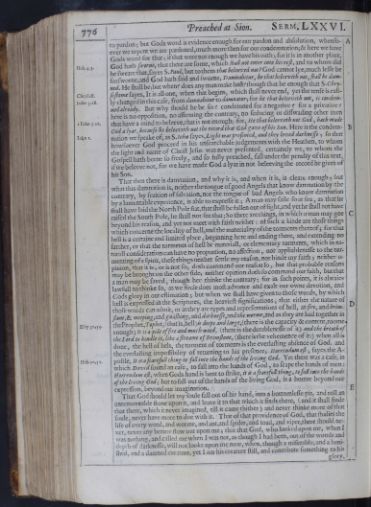 776
Preached at Sion.
Serm. LXXVI.
to pardon; but Gods word is evidence enough for our pardon and absolution, whenso-
776
Preached at Sion.
Serm. LXXVI.
to pardon; but Gods word is evidence enough for our pardon and absolution, whenso-ever we repent we are pardoned, much more then for our condemnation; & here we have
Gods word for that; if that were not enough we have his oath; for it is in another place,
God hath sworne, Heb. 4.3. that there are some, which shall not enter into his rest, and to whom did
he sweare that, sayes S. Paul, but to them that beleeved not? God cannot lye, much lesse be
forsworne, and God hath said and sworne, Damnabitur, he that beleeveth not, shall be dam-
ned. He shall be; but when? does any man make hast? though that be enough that S. Chry-
sostome sayes, Chrysost. It is all one, when that begins, which shall never end, yet the tense is easi-
ly changed in this case, Iohn 3.18. from damnabitur to damnatur; for he that beleeveth not, is condem-
ned already. But why should he be so? condemned for a negative? for a privative?
here is no opposition, no affirming the contrary, no seducing or disswading other men
that have a mind to beleeve, 1 Iohn 5.10. that is not enough; for, He that beleeveth not God, hath made
God a lyar, because he beleeveth not the record that God gave of his Son. Here is the condem-
nation we speake of, Iohn 1. as S. Iohn sayes, Light was presented, and they loved darknesse; so that
howsoever God proceed in his unsearchable judgements with the Heathen, to whom
the light and name of Christ Jesus was never presented, certainely we, to whom the
Gospell hath beene so freely, and so fully preached, fall under the penalty of this text,
if we beleeve not, for we have made God a lyar in not beleeving the record he gives of
his Son.
That then there is damnation, and why it is, and when it is, is cleare enough; but
what this damnation is, neither the tongue of good Angels that know damnation by the
contrary, by fruition of salvation, nor the tongue of bad Angels who know damnation
by a lamentable experience, is able to expresse it; A man may saile so at sea, as that he
shall have laid the North Pole flat, that shall be fallen out of sight, and yet he shall not have
raised the South Pole, he shall not see that; So there are things, in which a man may goe
beyond his reason, and yet not meet with faith neither: of such a kinde are those things
which concerne the locality of hell, and the materiality of the torments thereof; for that
hell is a certaine and limited place, beginning here and ending there, and extending no
farther, or that the torments of hell be materiall, or elementary torments, which in na-
turall consideration can have no proportion, no affection, nor appliablenesse to the tor-
menting of a spirit, these things neither settle my reason, nor binde my faith; neither o-
pinion, that it is, or is not so, doth command our reason so, but that probable reasons
may be brought on the other side; neither opinion doth so command our faith; but that
a man may be saved, though hee thinke the contrary; for in such points, it is alwaies
lawfull to thinke so, as we finde does most advance and exalt our owne devotion, and
Gods glory in our estimation; but when we shall have given to those words, by which
hell is expressed in the Scriptures, the heaviest significations, that either the nature of
those words can admit, or as they are types and representations of hell, as fire, and brim-
stone, & weeping, and gnashing, and darknesse, and the worme, and as they are laid together in
the Prophet, Esay 30.33. Tophet, (that is, hell) is deepe and large, (there is the capacity & content, roome
enough) It is a pile of fire and much wood, (there is the durablenesse of it) and the breath of
the Lord to kindle it, like a streame of Brimstone, (there is the vehemence of it:) when all is
done, the hell of helshells, the torment of torments is the everlasting absence of God, and
the everlasting impossibility of returning to his presence; Horrendum est, sayes the A-
postle, It is a fearefull thing to fall into the hands of the living God.Heb. 10.31. Yet there was a case, in
which David found an ease, to fall into the hands of God, to scape the hands of men:
Horrendum est, when Gods hand is bent to strike, it is a fearefull thing, to fall into the hands
of the living God; but to fall out of the hands of the living God, is a horror beyond our
expression, beyond our imagination.
That God should let my soule fall out of his hand, into a bottomlesse pit, and roll an
unremoveable stone upon it, and leave it to that which it finds there, (and it shall finde
that there, which it never imagined, till it came thither) and never thinke more of that
soule, never have more to doe with it. That of that providence of God, that studies the
life of every weed, and worme, and ant, and spider, and toad, and viper, there should ne-
ver, never any beame flow out upon me; that that God, who looked upon me, when I
was nothing, and called me when I was not, as though I had been, out of the womb and
depth of darknesse, will not looke upon me now, when, though a miserable, and a bani-
shed, and a damned creature, yet I am his creature still, and contribute something to his glory,
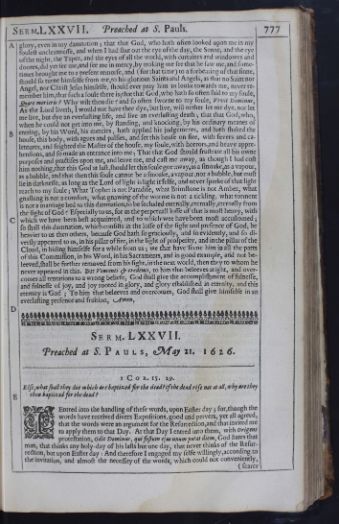 Serm. LXXVII.
Preached at S. Pauls.
777
glory, even in my damnation; that that God, who hath often looked upon me in my
Serm. LXXVII.
Preached at S. Pauls.
777
glory, even in my damnation; that that God, who hath often looked upon me in my
foulest uncleannesse, and when I had shut out the eye of the day, the Sunne, and the eye
of the night, the Taper, and the eyes of all the world, with curtaines and windowes and
doores, did yet see me, and see me in mercy, by making me see that he saw me, and some-
times brought me to a present remorse, and (for that time) to a forbearing of that sinne,
should so turne himselfe from me, to his glorious Saints and Angels, as that no Saint nor
Angel, nor Christ Jesus himselfe, should ever pray him to looke towards me, never re-
member him, that such a soule there is; that that God, who hath so often said to my soule,
Quare morieris? Why wilt thou die? and so often sworne to my soule, Vivit Dominus,
As the Lord liveth, I would not have thee dye, but live, will nether let me dye, nor let
me live, but dye an everlasting life, and live an everlasting death; that that God, who,
when he could not get into me, by standing, and knocking, by his ordinary meanes of
entring, by his Word, his mercies, hath applied his judgements, and hath shaked the
house, this body, with agues and palsies, and set this house on fire, with fevers and ca-
lentures, and frighted the Master of the house, my soule, with horrors, and heavy appre-
hensions, and so made an entrance into me; That that God should frustrate all his owne
purposes and practises upon me, and leave me, and cast me away, as though I had cost
him nothing, that this God at last, should let this soule goe away, as a smoake, as a vapour,
as a bubble, and that then this soule cannot be a smoake, a vapour, nor a bubble, but must
lie in darknesse, as long as the Lord of light is light it selfe, and never sparke of that light
reach to my soule; What Tophet is not Paradise, what Brimstone is not Amber, what
gnashing is not a comfort, what gnawing of the worme is not a tickling, what torment
is not a marriage bed to this damnation, to be secluded eternally, eternally, eternally from
the sight of God? Especially to us, for as the perpetuall losse of that is most heavy, with
which we have been best acquainted, and to which wee have been most accustomed;
so shall this damnation, which consists in the losse of the sight and presence of God, be
heavier to us then others, because God hath so graciously, and so evidently, and so di-
versly appeared to us, in his pillar of fire, in the light of prosperity, and in the pillar of the
Cloud, in hiding himselfe for a while from us; we that have seene him in all the parts
of this Commission, in his Word, in his Sacraments, and in good example, and not be-
leeved, shall be further removed from his sight, in the next world, then they to whom he
never appeared in this. But Vincenti & credenti, to him that beleeves aright, and over-
comes all tentations to a wrong beliefe, God shall give the accomplishment of fulnesse,
and fulnesse of joy, and joy rooted in glory, and glory established in eternity, and this
eternity is God; To him that beleeves and overcomes, God shall give himselfe in an
everlasting presence and fruition, Amen.
Serm. LXXVII.
Preached at S. Pauls, May 21. 1626.
1 Cor. 15.29.
Else, what shall they doe which are baptized for the dead? if the dead rise not at all, why are they
then baptized for the dead?
I Entred into the handling of these words, upon Easter day; for, though the
words have received divers Expositions, good and pervers, yet all agreed,
that the words were an argument for the Resurrection, and that invited me
to apply them to that Day. At that Day I entred into them, with Origens
protestation, Odit Dominus, qui festum ejus unum putat diem, God hates that
man, that thinks any holy-day of his lasts but one day, that never thinks of the Resur-
rection, but upon Easter day: And therefore I engaged my selfe willingly, according to
the invitation, and almost the necessity of the words, which could not conveniently, (scarce
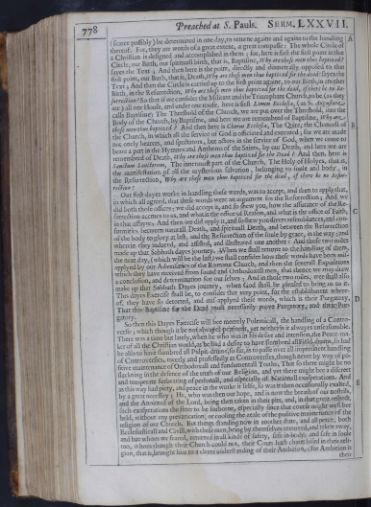 778
Preached at S. Pauls.
Serm. LXXVII.
(scarce possibly) be determined in one day, to returne againe and againe to the handling
778
Preached at S. Pauls.
Serm. LXXVII.
(scarce possibly) be determined in one day, to returne againe and againe to the handling
thereof. For, they are words of a great extent, a great compasse: The whole Circle of
a Christian is designed and accomplished in them; for, here is first the first point in that
Circle, our Birth, our spirituall birth, that is, Baptisme, Why are these men thus baptized?
sayes the Text; And then here is the point, directly and diametrally opposed to that
first point, our Birth, that is, Death, Why are these men thus baptized for the dead? sayes the
Text; And then the Circle is carried up to the first point againe, to our Birth, in another
Birth, in the Resurrection, Why are these men thus baptized for the dead, if there be no Re-
surrection? So that if we consider the Militant and the Triumphant Church, to be (as they
are) all one House, and under one roofe, here is first Limen Ecclesiæ, (as S. Augustine
calls Baptisme) The Threshold of the Church, we are put over the Threshold, into the
Body of the Church, by Baptisme, and here we are remembred of Baptisme, Why are
these men thus baptized? And then here is Chorus Ecclesiæ, The Quire, the Chancell of
the Church, in which all the service of God is officiated and executed; for we are made
not onely hearers, and spectators, but actors in the service of God, when we come to
beare a part in the Hymnes and Anthems of the Saints, by our Death, and here we are
remembred of Death, Why are these men thus baptized for the Dead? And then, here is
Sanctum Sanctorum, The innermost part of the Church, The Holy of Holyes, that is,
the manifestation of all the mysterious salvation, belonging to soule and body, in
the Resurrection, Why are these men thus baptized for the dead, if there be no Resur-
rection?
Our first dayes worke in handling these words, was to accept, and then to apply that,
in which all agreed, that these words were an argument for the Resurrection; And we
did both those offices; we did accept it, and so shew you, how the assurance of the Re-
surrection accrues to us, and what is the office of Reason, and what is the office of Faith,
in that affayre; And then we did apply it, and so shew you divers resemblances, and con-
formities between naturall Death, and spirituall Death, and between the Resurrection
of the body to glory at last, and the Resurrection of the soule by grace, in the way; and
wherein they induced, and assisted, and illustrated one another: And those two miles
made up that Sabbath dayes journey. When we shall returne to the handling of them,
the next day, (which will be the last) we shall consider how these words have been mis-
applyed by our Adversaries of the Romane Church, and then the severall Expositions
which they have received from sound and Orthodoxall men, that thence we may draw
a conclusion, and determination for our selves; And in those two miles, wee shall also
make up that Sabbath Dayes journey, when God shall be pleased to bring us to it.
This dayes Exercise shall be, to consider that very point, for the establishment where-
of, they have so detorted, and mis-applyed these words, which is their Purgatory,
That this Baptisme for the Dead must necessarily prove Purgatory, and their Pur-
gatory.
So then this Dayes Exercise will bee meerely Polemicall, the handling of a Contro-
versie; which though it be not alwayes pertinent, yet neither is it alwayes unseasonable.
There was a time but lately, when he who was in his desire and intension, the Peace-ma-
ker of all the Christian world, as he had a desire to have slumbred all Field-drums, so had
he also to have slumbred all Pulpit-drums, so far, as to passe over all impertinent handling
of Controversies, meerly and professedly as Controversies, though never by way of po-
sitive maintenance of Orthodoxall and fundamentall Truths; That so there might be no
slackning in the defence of the truth of our Religion, and yet there might bee a discreet
and temperate forbearing of personall, and especially of Nationall exasperations. And
as this way had piety, and peace in the worke it selfe, so was it then occasionally exalted,
by a great necessity; He, who was then our hope, and is now the breath of our nostrils,
and the Anointed of the Lord, being then taken in their pits, and, in that great respect,
such exasperations the fitter to be forborne, especially since that course might well bee
held, without any prevarication, or cooling the zeale of the positive maintenance of the
religion of our Church. But things standing now in another state, and all peace, both
Ecclesiasticall and Civill, with these men, being by themselves removed, and taken away,
and hee whom we feared, returned in all kinde of safety, safe in body, and safe in soule
too, whom though their Church could not, their Court hath chatechised in their reli-
gion, that is, brought him to a cleere understanding of their Ambition, (for Ambition is their
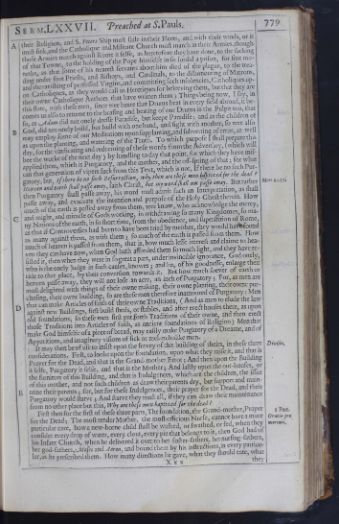 Serm. LXXVII.
Preached at S. Pauls.
779
their Religion, and S. Peters Ship must saile in their Fleets, and with their winds, or it
Serm. LXXVII.
Preached at S. Pauls.
779
their Religion, and S. Peters Ship must saile in their Fleets, and with their winds, or it
must sink, and the Catholique and Militant Church must march in their Armies, though
those Armies march against Rome it selfe, as heretofore they have done, to the sacking
of that Towne, to the holding of the Pope himselfe in so sordid a prison, for sixe mo-
neths, as that some of his nearest servants about him died of the plague, to the trea-
ding under foot Priests, and Bishops, and Cardinals, to the dishonouring of Matrons,
and the ravishing of professed Virgins, and committing such insolencies, Catholiques up-
on Catholiques, as they would call us Heretiques for beleeving them, but that they are
their owne Catholique Authors that have written them) Things being now, I say, in
this state, with these men, since wee heare that Drums beat in every field abroad, it be-
comes us also to returne to the brasing and beating of our Drums in the Pulpit too, that
so, as Adam did not onely dresse Paradise, but keepe Paradise; and as the children of
God, did not onely build, but build with one hand, and fight with another; so wee also
may employ some of our Meditations upon supplanting, and subverting of error, as well
as upon the planting, and watering of the Truth. To which purpose I shall prepare this
day, for the vindicating and redeeming of these words from the Adversary, (which will
bee the worke of the next day) by handling to day that point, for which they have mis-
applied them, which is Purgatory, and the mother, and the off-spring of that; for what
can that generation of vipers suck from this Text, which is not, If there be no such Pur-
gatory, but, If there be no such Resurrection, why then are these men baptized for the dead?
Heaven and earth shall passe away, saith Christ, but my word shall not passe away.Matt 24.35. But rather
then Purgatory shall passe away, his word must admit such an Interpretation, as shall
passe away, and evacuate the intention and purpose of the Holy Ghost therein. How
much of the earth is passed away from them, wee know, who acknowledge the mercy,
and might, and miracle of Gods working, in withdrawing so many Kingdomes, so ma-
ny Nations of the earth, in so short time, from the obedience, and superstition of Rome,
as that if Controversies had been to have been tried by number, they would have found
as many against them, as with them; so much of the earth is passed from them. How
much of heaven is passed from them, that is, how much lesse interest and claime to hea-
ven they can have now, when God hath afforded them so much light, and they have re-
sisted it, then when they were in so great a part, under invincible ignorance, God onely,
who is the onely Judge in such causes, knowes; and he, of his goodnesse, enlarge their
title to that place, by their conversion towards it. But how much soever of earth or
heaven passe away, they will not lose an acre, an inch of Purgatory; For, as men are
most delighted with things of their owne making, their owne planting, their owne pur-
chasing, their owne building, so are these men therefore inamoured of Purgatory: Men
that can make Articles of faith of their owne Traditions, (And as men to elude the law
against new Buildings, first build sheds, or stables, and after erect houses there, as upon
old foundations, so these men first put forth Traditions of their owne, and then erect
those Traditions into Articles of faith, as ancient foundations of Religion) Men that
make God himselfe of a piece of bread, may easily make Purgatory of a Dreame, and of
Apparitions, and imaginary visions of sick or melancholike men.
It may then be of use to insist upon the survey of this building of theirs, Divisio. in these three
considerations. First, to looke upon the foundation, upon what they raise it, and that is
Prayer for the Dead, and that is the Grand-mother Error; And then upon the Building
it selfe, Purgatory it selfe, and that is the Mother; And lastly upon the out-houses, or
the furniture of this Building, and that is Indulgences, which are the children, the issue
of this mother, and not such children as draw their parents dry, but support and main-
taine their parents; for, but for these Indulgences, their prayer for the Dead, and their
Purgatory would starve; And starve they must all, if they can draw their maintenance
from no other place but this, Why are these men baptized for the dead?
First then for the first of these three parts, The foundation, the Grand-mother, 1 Part. Prayer
for the Dead; The most tender Mother, the most officious Nurse, cannot have a more Oratio pro
mortuis.
particular care, how a new-borne child shall be washed, or swathed, or fed, when they
consider every drop of water, every clout, every pin that belongs to it, then God had of
his Infant Church, when he delivered it over to her foster-fathers, her nursing-fathers,
her god-fathers, Moses and Aaron, and bound them by his instructions, in every particu-
lar, as he prescribed them. How many directions he gave, what they should eate, what Xxx they
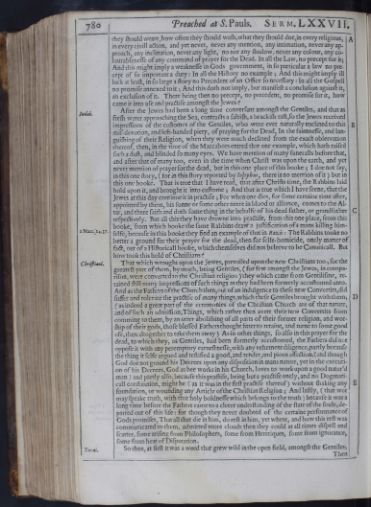 780
Preached at S. Pauls.
Serm. LXXVII.
they should weare, how often they should wash, what they should doe, in every religious,
780
Preached at S. Pauls.
Serm. LXXVII.
they should weare, how often they should wash, what they should doe, in every religious,
in every civill action, and yet never, never any mention, any intimation, never any ap-
proach, any inclination, never any light, no nor any shadow, never any colour, any co-
lourablenesse of any command of prayer for the Dead. In all the Law, no precept for it;
And this might imply a weaknesse in Gods government, in so particular a law no pre-
cept of so important a duty: In all the History no example; And this might imply ill
luck at least, in so large a story no Precedent of an Office so necessary: In all the Gospell
no promise annexed to it; And this doth not imply, but manifest a conclusion against it,
an exclusion of it. There being then no precept, no precedent, no promise for it, how
came it into use and practise amongst the Jewes?
After the Jewes had been a long time conversant amongst the Gentiles, Iudæi. and that as
fresh water approaching the Sea, contracts a saltish, a brackish tast, so the Jewes received
impressions of the customes of the Gentiles, who were ever naturally enclined to this
mis-devotion, and left-handed piety, of praying for the Dead, In the faintnesse, and lan-
guishing of their Religion, when they were much declined from the exact observation
thereof, then, in the time of the Maccabees entred that one example, which hath raised
such a dust, and blinded so many eyes. We have mention of many funeralls before that,
and after that of many too, even in the time when Christ was upon the earth, and yet
never mention of prayer for the dead, but in this one place of this booke; I doe not say,
in this one story, (for in this story reported by Iosephus, there is no mention of it) but in
this one booke. That is true that I have read, that after Christs time, the Rabbins laid
hold upon it, and brought it into custome; And that is true which I have seene, that the
Jewes at this day continue it in practise; For when one dies, for some certaine time after,
appointed by them, his sonne or some other neere in blood or alliance, comes to the Al-
tar, and there saith and doth some thing in the behalfe of his dead father, or grandfather
respectively. But all this they have drawne into practise, from this one place, from this
booke, from which booke the same Rabbins draw a justification of a mans killing him-
selfe, because in this booke they find an example of that in Razis:2 Macc. 14.37. The Rabbins tooke no
better a ground for their prayer for the dead, then for selfe-homicide, onely matter of
fact, out of a Historicall booke, which themselves did not beleeve to be Canonicall. But
how took this hold of Christians?
That which wrought upon the Jewes, Christiani. prevailed upon the new Christians too; for the
greatest part of them, by much, being Gentiles, (for few amongst the Jewes, in compa-
rison, were converted to the Christian religion) they which came from Gentilisme, re-
tained still many impressions of such things as they had been formerly accustomed unto.
And as the Fathers of the Church then, out of an indulgence to these new Convertits, did
suffer and tolerate the practise of many things, which these Gentiles brought with them;
(as indeed a great part of the ceremonies of the Christian Church are of that nature,
and of such an admission, Things, which rather then avert their new Convertits from
comming to them, by an utter abolishing of all parts of their former religion, and wor-
ship of their gods, those blessed Fathers thought fitter to retaine, and turne to some good
use, then altogether to take them away) As in other things, so also in this prayer for the
dead, to which they, as Gentiles, had been formerly accustomed, the Fathers did not
oppose it with any peremptory earnestnesse, with any vehement diligence, partly because
the thing it selfe argued and testified a good, and tender, and pious affection; (and though
God doe not ground his Decrees upon any disposition in mans nature, yet in the executi-
on of his Decrees, God as hee works in his Church, loves to work upon a good natur'd
man) and partly also, because this practise, being but a practise onely, and no Dogmati-
call constitution, might be (as it was in the first practise thereof) without shaking any
foundation, or wounding any Article of the Christian Religion; And lastly, (that wee
may speake truth, with that holy boldnesse which belongs to the truth) because it was a
long time before the Fathers came to a cleere understanding of the state of the soule, de-
parted out of this life: for though they never doubted of the certaine performance of
Gods promises, That all that die in him, do rest in him, yet where, and how this rest was
communicated to them, admitted more clouds then they could at all times dispell and
scatter, some arising from Philosophers, some from Heretiques, some from ignorance,
some from heat of Disputation.
So then, Tertul. at first it was a weed that grew wild in the open field, amongst the Gentiles; Then
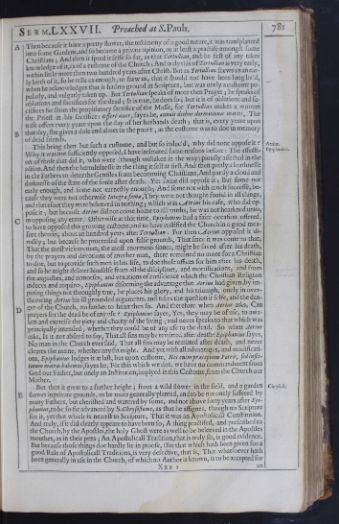 Serm. LXXVII.
Preached at S. Pauls.
781
Then because it bore a pretty flower, the testimony of a good nature, it was transplanted
Serm. LXXVII.
Preached at S. Pauls.
781
Then because it bore a pretty flower, the testimony of a good nature, it was transplanted
into some Gardens, and so became a private opinion, or at least a practise amongst some
Christians; And then it spred it selfe so far, as that Tertullian, and he first of any takes
knowledge of it, as of a custome of the Church; And truly this of Tertullian is very early,
within little more then two hundred years after Christ. But as Tertullian shews us an ear-
ly birth of it, so he tells us enough, to shew us, that it should not have been long liv'd,
when he acknowledges that it had no ground in Scripture, but was onely a custome po-
pularly, and vulgarly taken up. But Tertullian speaks of more then Prayer; he speaks of
oblations and sacrifices for the dead; It is true, he does so; but it is of oblations and sa-
crifices far from the propitiatory sacrifice of the Masse, for Tertullian makes a woman
the Priest in his sacrifice: Offert uxor, sayes he, annuis diebus dormitionis mariti, The
wife offers every yeare upon the day of her husbands death; that is, every yeare upon
that day, she gives a dole and almes to the poore, as the custome was to doe in memory
of dead friends.
This being then but such a custome, and but so induc'd, why did none oppose it?Aerius.
Epiphanius.
Why it was not sufficiently opposed, I have intimated some reasons before: The affecti-
on of those that did it, who were (though mistaken in the way) piously affected in the
action, And then the harmlesnesse in the thing it self at first, And then partly a loathnesse
in the Fathers to deter the Gentiles from becomming Christians, And partly a cloud and
darknesse of the state of the soule after death. Yet some did oppose it; But some not
early enough, and some not earnestly enough; And some not with much successe, be-
cause they were not otherwise Integræ famæ, They were not thought sound in all things,
and therefore they were beleeved in nothing; which was Aerius his case, who did op-
pose it; but because Aerius did not come home to all truths, he was not hearkned unto,
in opposing any error. Otherwise at that time, Epiphanius had a faire occasion offered,
to have opposed this growing custome, and to have rectified the Church in a good mea-
sure therein, about an hundred years after Tertullian: For then Aerius opposed it di-
rectly; but because he proceeded upon false grounds, That since it was come to that,
That the most vicious man, the most enormous sinner, might be saved after his death,
by the prayers and devotions of another man, there remained no more for a Christian
to doe, but to provide such men in his life, to doe those offices for him after his death,
and so he might deliver himselfe from all the disciplines, and mortifications, and from
the anguishes, and remorses, and vexations of conscience which the Christian Religion
induces and requires, Epiphanius discerning the advantage that Aerius had given, by im-
puting things not throughly true, he places his glory, and his triumph, onely in over-
throwing Aerius his ill grounded arguments, and takes the question it selfe, and the dan-
ger of the Church, no farther to heart then so. And therefore when Aerius asks, Can
prayers for the dead be of any use? Epiphanius sayes, Yes, they may be of use, to awa-
ken and exercise the piety and charity of the living; and never speaks to that which was
principally intended, whether they could be of any use to the dead. So when Aerius
asks, Is it not absurd to say, That all sins may be remitted after death? Epiphanius sayes,
No man in the Church ever said, That all sins may be remitted after death, and never
cleares the maine, whether any sin might. And yet with all advantages, and modificati-
ons, Epiphanius lodges it at last, but upon custome, Nec enim præceptum Patris, sed insti-
tutum matris habemus, sayes he, For this which we doe, we have no commandment from
God our Father, but onely an Institution, implyed in this Custome, from the Church our
Mother.
But then it grew to a farther height; from a wild flower in the field, Chrysost. and a garden
flower in private grounds, to be more generally planted, and to be not onely suffered by
many Fathers, but cherished and watered by some, and not above forty years after Epi-
phanius, to be so far advanced by S. Chrysostome, as that he assignes, though no Scripture
for it, yet that which is nearest to Scripture, That it was an Apostolicall Constitution.
And truly, if it did clearly appeare to have been so, A thing practised, and prescribed to
the Church, by the Apostles, the holy Ghost were as well to be beleeved in the Apostles
mouthes, as in their pens; An Apostolicall Tradition, that is truly so, is good evidence.
But because those things doe hardly lie in proofe, (for that which hath been given for a
good Rule of Apostolicall Traditions, is very defective, that is, That whatsoever hath
been generally in use in the Church, of which no Author is known, is to be accepted for Xxx2 an
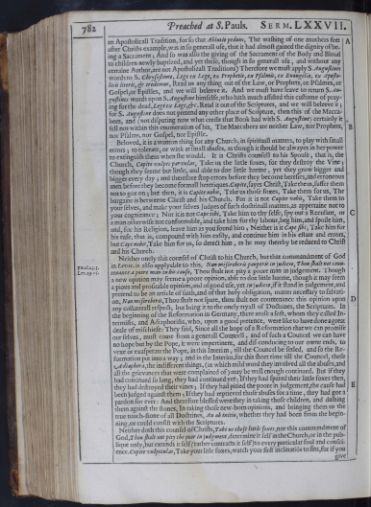 782
Preached at S. Pauls.
Serm. LXXVII.
an Apostolicall Tradition, for so that Ablutio pedum, The washing of one anothers feet
782
Preached at S. Pauls.
Serm. LXXVII.
an Apostolicall Tradition, for so that Ablutio pedum, The washing of one anothers feet
after Christs example, was in so generall use, that it had almost gained the dignity of be-
ing a Sacrament; And so was also the giving of the Sacrament of the Body and Bloud
to children newly baptized, and yet these, though in so generall use, and without any
certaine Author, are not Apostolicall Traditions) Therefore we must apply S. Augustines
words to S. Chrysostome, Lege ex Lege, ex Prophetis, ex Psalmis, ex Euangelio, ex Aposto-
licis literis, & credemus, Read us any thing out of the Law, or Prophets, or Psalmes, or
Gospel, or Epistles, and we will beleeve it. And we must have leave to return S. Au-
gustines words upon S. Augustine himselfe, who hath much assisted this custome of pray-
ing for the dead, Lege ex Lege, &c. Read it out of the Scriptures, and we will beleeve it;
for S. Augustine does not pretend any other place of Scripture, then this of the Macca-
bees, and (not disputing now what credit that Book had with S. Augustine) certainly it
fell not within this enumeration of his, The Maccabees are neither Law, nor Prophets,
nor Psalms, nor Gospel, nor Epistle.
Beloved, it is a wanton thing for any Church, in spirituall matters, to play with small
errors; to tolerate, or wink at small abuses, as though it should be alwayes in her power
to extinguish them when she would. It is Christs counsell to his Spouse, that is, the
Church, Capite vulpes parvulas, Take us the little foxes, for they destroy the Vine;
though they seeme but little, and able to doe little harme, yet they grow bigger and
bigger every day; and therefore stop errors before they become heresies, and erroneous
men before they become formall heretiques. Capite, sayes Christ, Take them, suffer them
not to goe on; but then, it is Capite nobis, Take us those foxes, Take them for us, The
bargaine is betweene Christ and his Church. For it is not Capite vobis, Take them to
your selves, and make your selves Judges of such doctrinall matters, as appertaine not to
your cognizance; Nor it is not Cape tibi, Take him to thy selfe, spy out a Recusant, or
a man otherwise not conformable, and take him for thy labour, beg him, and spoile him,
and, for his Religion, leave him as you found him; Neither is it Cape sibi, Take him for
his ease, that is, compound with him easily, and continue him in his estate and errors,
but Cape nobis, Take him for us, so detect him, as he may thereby be reduced to Christ
and his Church.
Neither onely this counsel of Christ to his Church, but that commandment of God
in Levit.Exod. 23.3. is also applyable to this, Non misereberis pauperis in judicio, Thou shalt not coun-
tenance a poore man in his cause, Thou shalt not pity a poore man in judgement. Though Lev. 19.15.
a new opinion may seeme a poore opinion, able to doe little harme, though it may seem
a pious and profitable opinion, and of good use, yet In judicio, if it stand in judgement, and
pretend to be an article of faith, and of that holy obligation, matter necessary to salvati-
on, Non misereberis, Thou shalt not spare, thou shalt not countenance this opinion upon
any collaterall respect, but bring it to the onely tryall of Doctrines, the Scriptures. In
the beginning of the Reformation in Germany, there arose a sect, whom they called In-
termistsIn-
terimists, and Adiaphorists, who, upon a good pretence, were like to have done a great
deale of mischiefe: They said, Since all the hope of a Reformation that we can promise
our selves, must come from a generall Councell, and of such a Councel we can have
no hope but by the Pope, it were impertinent, and dis-conducing to our owne ends, to
vexe or exasperate the Pope, in this Interim, till the Councel be setled, and so the Re-
formation put into a way; and in the Interim, for this short time till the Councel, these
Adiaphora, the indifferent things, (in which mild word they involved all the abuses, and
all the grievances that were complained of) may be well enough continued. But if they
had continued so long, they had continued yet; If they had spared their little foxes then,
they had destroyed their vines; If they had pitied the poore in judgement, the cause had
been judged against them; If they had reprieved those abuses for a time, they had got a
pardon for ever: And therefore blessed were they in taking those children, and dashing
them against the stones, In taking those new-born opinions, and bringing them to the
true touch-stone of all Doctrines, An ab initio, whether they had been from the begin-
ning, or could consist with the Scriptures.
Neither doth this counsel of Christs, Take us these little foxes, nor this commandment of
God, Thou shalt not pity the poor in judgment, determine it self in the Church, or in the pub-
lique only, but extends it self (rather contracts it self) to every particular soul and consci-
ence. Capite vulpeculas, Take your litle foxes, watch your first inclinatiōs to sins, for if you give
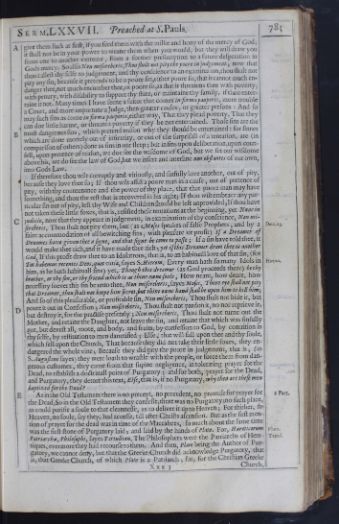 Serm. LXXVII.
Preached at S. Pauls.
783
give them suck at first, if you feed them with the milke and hony of the mercy of God,
Serm. LXXVII.
Preached at S. Pauls.
783
give them suck at first, if you feed them with the milke and hony of the mercy of God,
it shall not be in your power to weane them when you would, but they will draw you
from one to another extreme, from a former presumption to a future desperation in
Gods mercy. So also Non misereberis, Thou shalt not pity the poore in judgement, now that
thou callest thy selfe to judgement, and thy conscience to an examination, thou shalt not
pity any sin, because it pretends to be a poore sin, either poore so, that it cannot much en-
danger thee, not much encumber thee, or poore so, as that it threatens thee with poverty,
with penury, with disability to support thy state, or maintaine thy family, if thou enter-
taine it not. Many times I have seene a suitor that comes in forma pauperis, more trouble
a Court, and more importune a Judge, then greater causes, or greater persons: And so
may such sins as come in forma pauperis, either way, That they plead poverty, That they
can doe little harme, or threaten poverty if they be not entertained. Those sins are the
most dangerous sins, which pretend reason why they should be entertained: for sinnes
which are done meerely out of infirmity, or out of the surprisall of a tentation, are (in
comparison of others) done as sins in our sleep; but in sins upon deliberation, upon coun-
sell, upon pretence of reason, we doe see the wisdome of God, but we set our wisdome
above his, we do see the law of God, but we insert and interline non obstantes of our own,
into Gods Law.
If therefore thou wilt corruptly and vitiously, and sinfully love another, out of pity,
because they love thee so; If thou wilt assist a poore man in a cause, out of pretence of
pity, with thy countenance and the power of thy place, that that poore man may have
something, and thou the rest that is recovered in his right; If thou wilt embrace any par-
ticular sin out of pity, lest thy Wife and Children should be left unprovided; If thou have
not taken these little foxes, that is, resisted these tentations at the beginning, yet Nunc in
judicio, now that they appeare in judgement, in examination of thy conscience, Non mi-
sereberis, Thou shalt not pity them, but (as Moses speakes of false Prophets, Deut. 13. and by a
faire accommodation of all bewitching sins, with pleasure or profit) If a Dreamer of
Dreames have given thee a signe, and that signe be come to passe; If a sin have told thee, it
would make thee rich, and it have made thee rich; yet if this Dreamer draw thee to another
God, If this profit draw thee to an Idolatrous, that is, to an habituall love of that sin, (for
Tot habemus recentes Deos, quot vitia, sayes S. Hierom, Hieron. Every man hath so many Idols in
him, as he hath habituall sins) yet, Though this dreamer (as God proceeds there) be thy
brother, or thy son, or thy friend which is as thine owne soule, How neare, how deare, how
necessary soever this sin be unto thee, Non misereberis, sayes Moses, Thine eye shall not pity
that Dreamer, thou shalt not keepe him secret, but thine owne hand shall be upon him to kill him;
And so of this pleasurable, or profitable sin, Non misereberis, Thou shalt not hide it, but
poure it out in Confession; Non misereberis, Thou shalt not pardon it, no nor reprieve it,
but destroy it, for the practise presently; Non misereberis, Thou shalt not turne out the
Mother, and retaine the Daughter, not leave the sin, and retaine that which was sinfully
got, but devest all, roote, and body, and fruits, by confession to God, by contrition in
thy selfe, by restitution to men damnified; Else, that will fall upon thee and thy soule,
which fell upon the Church, That because they did not take their little foxes, they en-
dangered the whole vine; Because they did pity the poore in judgement, that is, (as
S. Augustine sayes) they were loath to wrastle with the people, or force them from dan-
gerous customes, they came from that supine negligence, in tolerating prayer for the
Dead, to establish a doctrinall point of Purgatory; and for both, prayer for the Dead,
and Purgatory, they detort this text, Else, that is, if no Purgatory, why then are these men
baptized for the Dead?
As in the Old Testament there is no precept, no precedent, 2 Part. no promise for prayer for
the Dead, So in the Old Testament they confesse, there was no Purgatory; no such place,
as could purifie a soule to that cleannesse, as to deliver it up to Heaven; For thither, to
Heaven, no soule, say they, had accesse, till after Christs ascension. But as the first men-
tion of prayer for the dead was in time of the Maccabees, so much about the same time
was the first stone of Purgatory laid; and laid by the hands of Plato. For, Plato.
Tertul. Hæreticorum
Patriarchæ, Philosophi, sayes Tertullian, The Philosophers were the Patriarchs of Here-
tiques, evermore they had recourse to them. And then, Plato being the Author of Pur-
gatory, we cannot deny, but that the Greeke Church did acknowledge Purgatory, that
is, that Greeke Church, of which Plato is a Patriarch; for, for the Christian Greeke Xxx3 Church,
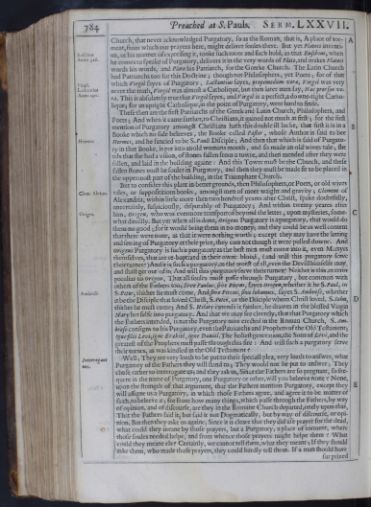 784
Preached at S. Pauls.
Serm. LXXVII.
Church, that never acknowledged Purgatory, so as the Roman, that is, A place of tor-
784
Preached at S. Pauls.
Serm. LXXVII.
Church, that never acknowledged Purgatory, so as the Roman, that is, A place of tor-ment, from which our prayers here, might deliver soules there. But yet Platoes inventi-
on, or his manner of expressing it, Eusebius
Anno 326. tooke such roote and such hold, as that Eusebius, when
he comes to speake of Purgatory, delivers it in the very words of Plato, and makes Platoes
words his words, and Plato his Patriarch, for the Greeke Church. The Latin Church
had Patriarchs too for this Doctrine; though not Philosophers, yet Poets; for of that
which Virgil sayes of Purgatory, Virgil.
Lactantius
Anno 290. Lactantius sayes, propemodum vera, Virgil was very
neere the truth, Virgil was almost a Catholique, but then later men say, Hæc prorsus ve-
ra, This is absolutely true that Virgil sayes, and Virgil is a perfect, a downe-right Catho-
lique; for an upright Catholique, in the point of Purgatory, were hard to finde.
These then are the first Patriarchs of the Greek and Latin Church, Philosophers, and
Poets; And when it came farther, to Christians, it gained not much at first; for the first
mention of Purgatory amongst Christians hath this double ill lucke, that first it is in a
Booke which no side beleeves, the Booke called Pastor, whose Author is said to bee
Hermes, Hermes. and he fancied to be S. Pauls Disciple; And then that which is said of Purgato-
ry in that Booke, is put into an old womans mouth, and so made an old wives tale; she
telstells that she had a vision, of stones fallen from a towre, and then mended after they were
fallen, and laid in the building againe: And this Towre must be the Church, and these
fallen stones must be soules in Purgatory, and then they must be made fit to be placed in
the uppermost part of the building, in the Triumphant Church.
But to consider this plant in better grounds, then Philosophers, or Poets, or old wives
tales, Clem. Alexan. or supposititious books, amongst men of more waight and gravity; Clement of
Alexandria, within little more then two hundred yeares after Christ, spake doubtfully,
uncertainly, suspiciously, disputably of Purgatory; And within twenty yeares after
him, Origen. Origen, who was evermore transported beyond the letter, upon mysteries, some-
what directly. But yet when all is done, Origens Purgatory is a purgatory, that would do
them no good; for it would bring them in no money; and they could be as well content
that there were none, as that it were nothing worth; except they may have the letting
and setting of Purgatory at their price, they care not though it were pulled downe. And
Origens Purgatory is such a purgatory as the best men must come into it, even Martyrs
themselves, that are re-baptized in their owne blood, (and will this purgatory serve
their turnes?) And it is such a purgatory, as the worst of all, even the Devill himselfe may,
and shall get out of it; And will this purgatory serve their turnes? Neither is this an error
peculiar to Origen, That all soules must passe through Purgatory, but common with
others of the Fathers too; Sive Paulus, sive Petrus, sayes Origen, whether it be S. Paul, or
S . Peter,Ambrose. thither he must come, And sive Petrus, sive Iohannes, sayes S. Ambrose, whether
it be the Disciple that loved Christ, S. Peter, or the Disciple whom Christ loved, S. Iohn,
thither he must come; And S. Hilary extends it farther, he drawes in the blessed Virgin
Mary her selfe into purgatory. And that we may see cleerely, that that Purgatory which
the Fathers intended, is not the Purgatory now erected in the Roman Church, S. Am-
brose consigns to his Purgatory, even the Patriarchs and Prophets of the Old Testaments;
Igne filii Levi, igne Ezekiel, igne Daniel, The holiest generation, the Sons of Levi, and the
greatest of the Prophets must passe through this fire: And will such a purgatory serve
their turnes, as was kindled in the Old Testament?
Well;Interrogant
nos. They are very loath to be put to their speciall plea, very loath to answer, what
Purgatory of the Fathers they will stand to; They would not be put to answer; They
chuse rather to interrogate us; and they ask us, Since the Fathers are so pregnant, so fre-
quent in the name of Purgatory, one Purgatory or other, will you beleeve none? None,
upon the strength of that argument, that the Fathers mention Purgatory, except they
will assigne us a Purgatory, in which those Fathers agree, and agree it to be matter of
faith, to beleeve it; for from how many things, which passe through the Fathers, by way
of opinion, and of discourse, are they in the Romane Church departed, onely upon that,
That the Fathers said it, but said it not Dogmatically, but by way of discourse, or opi-
nion. But then they aske us againe, Since it is cleare that they did use prayer for the dead,
what could they meane by those prayers, but a Purgatory, a place of torment, where
those soules needed helpe, and from whence those prayers might helpe them? What
could they meane els? Certainly, we cannot tell them, what they meant; If they should
aske them, who made those prayers, they could hardly tell them. If a man should have surprized
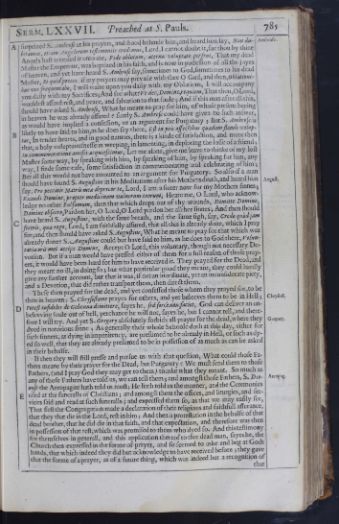 Serm. LXXVII.
Preached at S. Pauls.
785
surprized S. Ambrose at his prayers, and stood behinde him, and heard him say, Non Ambrose. du-
Serm. LXXVII.
Preached at S. Pauls.
785
surprized S. Ambrose at his prayers, and stood behinde him, and heard him say, Non Ambrose. du-bitamus, etiam Angelorum testimoniis credimus, Lord, I cannot doubt it, for thou by thine
Angels hast revealed it unto me, Fide ablutum, æterna voluptate perfrui, That my dead
Master the Emperour, was baptized in his faith, and is now in possession of all the joyes
of heaven, and yet have heard S. Ambrose say, sometimes to God, sometimes to his dead
Master, Si quid preces, if my prayers may prevaile with thee O God, and then, Oblationi-
bus vos frequentabo, I will waite upon you daily with my Oblations, I will accompany
you daily with my Sacrifices; And for what? Vt des, Domine, requiem, That thou, O Lord,
wouldest afford rest, and peace, and salvation to that soule, And if this man after all this,
should have asked S. Ambrose, What he meant to pray for him, of whose present beeing
in heaven he was already assured? surely S. Ambrose could have given no such answer,
as would have implied a confession, or an argument for Purgatory; But S. Ambrose is
likely to have said to him, as he does say there, Est in piis affectibus quædam stendi volup-
tas, In tender hearts, and in good natures, there is a kinde of satisfaction, and more then
that, a holy voluptuousnesse in weeping, in lamenting, in deploring the losse of a friend;
In commemoratione amissi acquiescimus, Let me alone, give me leave to thinke of my lost
Master some way, by speaking with him, by speaking of him, by speaking for him, any
way, I finde some ease, some satisfaction in commemorating and celebrating of him;
But all this would not have amounted to an argument for Purgatory. So also if a man
should have found S. Augustine in his Meditations after his Mothers death, August. and heard him
say, Pro peccatis Matris meæ deprecor te, Lord, I am a suiter now for my Mothers sinnes;
Exaudi Domine, propter medicinam vulnerum tuorum, Heare me, O Lord, who acknow-
ledge no other Balsamum, then that which drops out of thy wounds, Dimitte Domine,
Domine obsecro, Pardon her, O Lord, O Lord pardon her all her sinnes; And then should
have heard S. Augustine, with the same breath, and the same sigh, say, Credo quòd jam
feceris, quæ rogo, Lord, I am faithfully assured, that all this is already done, which I pray
for; and then should have asked S. Augustine, What he meant to pray for that which was
already done? S. Augustine could but have said to him, as he does to God there, Volun-
taria oris mei accipe Domine, Accept O Lord, this voluntary, though not necessary De-
votion. But if a man would have pressed either of them for a full reason of those pray-
ers, it would have been hard for him to have received it. They prayed for the Dead, and
they meant no ill, in doing so; but what particular good they meant, they could hardly
give any farther account, but that it was, if not an inordinate, yet an inconsiderate piety,
and a Devotion, that did rather transport them, then direct them.
These then prayed for the dead, and yet confessed those whom they prayed for, to be
then in heaven; S. Chrysostome prayes for others, and yet beleeves them to be in Hell;Chrysost.
Potest infideles de Gehenna dimittere, sayes he, sed fortè non faciet, God can deliver an un-
beleeving soule out of hell, perchance he will not, sayes he, but I cannot tell, and there-
fore I will try. And yet S. Gregory absolutely forbids all prayer for the dead, Gregory. where they
dyed in notorious sinne; As generally their whole Schoole doth at this day, either for
such sinners, as dying in impenitency, are presumed to be already in Hell, or such as dy-
ed so well, that they are already presumed to be in possession of as much as can be asked
in their behalfe.
If then they will still presse and pursue us with that question, What could those Fa-
thers meane by their prayer for the Dead, but Purgatory? We must send them to those
Fathers, (and I pray God they may get to them) to aske what they meant. So much as
any of those Fathers have told us, we can tell them; and amongst those Fathers, Areopag. S. Dio-
nyse the Areopagite hath told us most; He hath told us the manner, and the Ceremonies
used at the funeralls of Christians; and amongst them the offices, and liturgies, and ser-
vices said and read at such funeralls; and expressed them so, as that we may easily see,
That first the Congregation made a declaration of their religious and faithfull assurance,
that they that die in the Lord, rest in him; And then a protestation in the behalfe of that
dead brother, that he did die in that faith, and that expectation, and therefore was then
in possession of that rest, which was promised to them who dyed so. And this testimony
for themselves in generall, and this application thereof to that dead man, sayes he, the
Church then expressed in the forme of prayer, and so seemed to aske and beg at Gods
hands, that which indeed they did but acknowledge to have received before; they gave
that the forme of a prayer, as of a future thing, which was indeed but a recognition of that
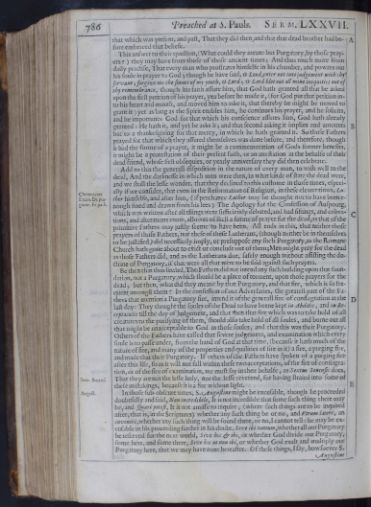 786
Preached at S. Pauls.
Serm. LXXVII.
that which was present, and past, That they did then, and that that dead brother had be-
786
Preached at S. Pauls.
Serm. LXXVII.
that which was present, and past, That they did then, and that that dead brother had be-fore embraced that beliefe.
This answer to their question, (What could they meane but Purgatory, by those pray-
ers?) they may have from those of those ancient times; And thus much more from
daily practise, That every man who prostrates himselfe in his chamber, and powres out
his soule in prayer to God; though he have said, O Lord, enter not into judgement with thy
servant; forgive me the sinnes of my youth, O Lord; O Lord blot out all mine iniquities out of
thy remembrance, though his faith assure him, that God hath granted all that he asked
upon the first petition of his prayer, yea before he made it, (for God put that petition in-
to his heart and mouth, and moved him to aske it, that thereby he might be moved to
grant it) yet as long as the Spirit enables him, he continues his prayer, and he solicits,
and he importunes God for that which his conscience assures him, God hath already
granted: He hath it, and yet he asks it; and that second asking it implies and amounts
but to a thankesgiving for that mercy, in which he hath granted it. So those Fathers
prayed for that which they assured themselves was done before, and therefore, though
it had the forme of a prayer, it might be a commemoration of Gods former benefits;
it might be a protestation of their present faith, or an attestation in the behalfe of their
dead friend, whose first obsequies, or yearly anniversary they did then celebrate.
Add to this the generall disposition in the nature of every man, to wish well to the
dead, And the darknesse in which men were then, in what kinde of state the dead were,
and we shall the lesse wonder, that they declined to this custome in those times, especi-
ally if we consider, Chemnicius
Exam. De pur-
gator. fo. 92. b. that even in the Reformation of Religion, in these clearer times, Lu-
ther himselfe, and after him, (if perchance Luther may be thought not to have been e-
nough fined and drawn from his lees) The Apology for the Confession of Auspourg,
which was written after all things were sufficiently debated, and had siftings, and cribra-
tions, and alterations enow, allowes of such a forme of prayer for the dead, as that of the
primitive Fathers may justly seeme to have been. All ends in this, that neither those
prayers of those Fathers, nor these of these Lutherans, (though neither be in themselves
to be justified) did necessarily imply, or presuppose any such Purgatory, as the Romane
Church hath gone about to evict or conclude out of them; Men might pray for the dead
as those Fathers did, and as the Lutherans doe, safely enough without assisting the do-
ctrine of Purgatory, if that were all that were to be said against such prayers.
Be then that thus settled, The Fathers did not intend any such building upon that foun-
dation, not a Purgatory, which should be a place of torment, upon those prayers for the
dead; but then, what did they meane by that Purgatory, and that fire, which is so fre-
quent amongst them? In the confession of our Adversaries, the greatest part of the Fa-
thers that mention a Purgatory fire, intend it of the generall fire of conflagration at the
last day: They thought the soules of the Dead to have beene kept in Abditis, and in Re-
ceptaculis till the day of Judgement, and that then that fire which was to take hold of all
creatures to the purifying of them, should also take hold of all soules, and burne out all
that might be unacceptable to God in those soules, and that this was their Purgatory.
Others of the Fathers have called that severe judgement, and examination which every
soule is to passe under, from the hand of God at that time, (because it hath much of the
nature of fire, and many of the properties and qualities of fire in it) a fire, a purging fire,
and made that their Purgatory. If others of the Fathers have spoken of a purging fire
after this life, so as it will not fall within these two acceptations, of the fire of conflagra-
tion, or of the fire of examination, we must say in their behalfe, as Sextus Senensis does,
That they are not the lesse holy, Sext. Senens. nor the lesse reverend, for having straied into some of
these mistakings, because it is a fire without light.
In those sub-obscure times, August. S. Augustine might be excusable, though he proceeded
doubtfully and said, Non incredibile, It is not incredible that some such thing there may
be, and Quæri potest, It is not amisse to inquire, (where such things are to be inquired
after, that is, in the Scriptures) whether any such thing be or no, and Vtrum latere, an
inveniri, whether any such thing will be found there, or no, I cannot tell: he may be ex-
cusable in his proceeding farther in his doubt, Sive ibi tantum, whether all our Purgatory
be reserved for the next world, Sive hic & ibi, or whether God divide our Purgatory,
some here, and some there, Sive hic ut non ibi, or whether God exalt and multiply our
Purgatory here, that we may have none hereafter. Of these things, I say, howsoever S. Augustine
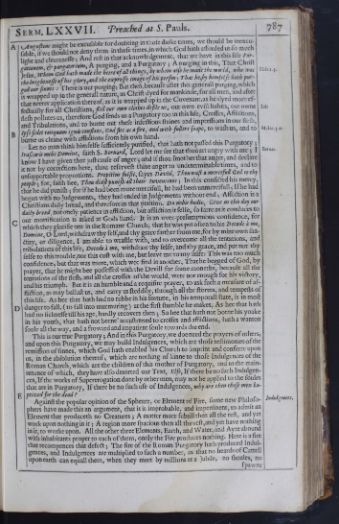 Serm. LXXVII.
Preached at S. Pauls.
787
Augustine might be excusable for doubting in those darke times, we should be inexcu-
Serm. LXXVII.
Preached at S. Pauls.
787
Augustine might be excusable for doubting in those darke times, we should be inexcu-sable, if we should not deny them in these times, in which God hath afforded us so much
light and clearenesse; And rest in that acknowledgement, that we have in this life Pur-
gationem, & purgatorium, A purging, and a Purgatory; A purging in this, That Christ
Jesus, Whom God hath made the heire of all things, by whom also he made the world,Heb. 1.3. who was
the brightnesse of his glory, and the expresse image of his person; That he, by himselfe hath pur-
ged our sinnes: There is our purging; But then, because after this generall purging, which
is wrapped up in the generall nature, as Christ dyed for mankinde, for all men, and after
that neerer application thereof, as it is wrapped up in the Covenant, as he dyed more ef-
fectually for all Christians, still our own clothes defile us, our own evill habits, Iob our owne
flesh pollutes us, therefore God sends us a Purgatory too in this life, Crosses, Afflictions,
and Tribulations, and to burne out these infectious staines and impressions in our flesh,
Ipse sedet tanquam ignis conflans, God sits as a fire, and with fullers soape, to wash us, Malac. 3.2. and to
burne us cleane with afflictions from his own hand.
Let no man think himselfe sufficiently purified, that hath not passed this Purgatory;
Irascaris mihi Domine, saith S. Bernard, Lord let me see that thou art angry with me;Bernar. I
know I have given thee just cause of anger; and if thou smother that anger, and declare
it not by corrections here, thou reservest thine anger to undeterminable times, and to
unsupportable proportions. Propitius fuisti, sayes David, Thou wast a mercifull God to thy
people; for, saith hee, Thou didst punish all their Inventions; In this consisted his mercy,
that he did punish; for if he had been more mercifull, he had been unmercifull; If he had
begun with no Judgements, they had ended in Judgements without end; Affliction is a
Christians daily bread, and therefore in that petition, Da nobis hodie, Give us this day our
daily bread, not onely patience in affliction, but affliction it selfe, so farre as it conduces to
our mortification is asked at Gods hand. It is an over-presumptuous confidence, for
which they glorifie one in the Romane Church, that he was put often to his Decede à me,
Domine, O Lord, withdraw thy self, and thy grace farther from me, for by mine own san-
ctity, or diligence, I am able to wrastle with, and to overcome all the tentations, and
tribulations of this life, Decede à me, withdraw thy selfe, and thy grace, and put not thy
selfe to this trouble, nor this cost with me, but leave me to my selfe: This was too much
confidence; but that was more, which wee find in another, That he begged of God, by
prayer, that he might bee possessed with the Devill for some moneths, because all the
tentations of the flesh, and all the crosses of the world, were not enough for his victory,
and his triumph. But it is an humble and a requisite prayer, to ask such a measure of af-
fliction, as may ballast us, and carry us steddily, through all the storms, and tempests of
this life. As hee that hath had no rubbe in his fortune, in his temporall state, is in most
danger to fall, (to fall into murmuring) at the first stumble he makes, As hee that hath
had no sicknesse till his age, hardly recovers then; So hee that hath not borne his yoake
in his youth, that hath not beene accustomed to crosses and afflictions, hath a wanton
soule all the way, and a froward and impatient soule towards the end.
This is our true Purgatory; And in this Purgatory, we doe need the prayers of others;
and upon this Purgatory, we may build Indulgences, which are those testimonies of the
remission of sinnes, which God hath enabled his Church to imprint and conferre upon
us, in the absolution thereof; which are nothing of kinne to those Indulgences of the
Roman Church, which are the children of this mother of Purgatory, and to the main-
tenance of which, they have also detorted our Text, Else, If there be no such Indulgen-
ces, If the works of Supererogation done by other men, may not be applied to the soules
that are in Purgatory, If there be no such use of Indulgences, why are then these men ba-
ptized for the dead?
Against the popular opinion of the Spheare, or Element of Fire, Indulgences. some new Philoso-
phers have made this an argument, that it is improbable, and impertinent, to admit an
Element that produceth no Creatures; A matter more subtill then all the rest, and yet
work upon nothing in it; A region more spacious then all the rest, and yet have nothing
in it, to worke upon. All the other three Elements, Earth, and Water, and Ayre abound
with inhabitants proper to each of them, onely the Fire produces nothing. Here is a fire
that recompences that defect; The fire of the Roman Purgatory hath produced Indul-
gences, and Indulgences are multiplied to such a number, as that no heards of Cattell
upon earth can equall them, when they meet by millions at a Jubile, no shoales, no spawne
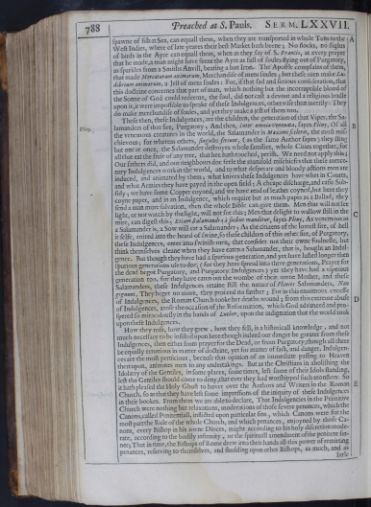 788
Preached at S. Pauls.
Serm. LXXVII.
spawne of fish at Sea, can equall them, when they are transported in whole Tuns to the
788
Preached at S. Pauls.
Serm. LXXVII.
spawne of fish at Sea, can equall them, when they are transported in whole Tuns to the
West Indies, where of late yeares their best Market hath beene; No flocks, no flights
of birds in the Ayre can equall them, when as they say of S. Francis, at every prayer
that he made, a man might have seene the Ayre as full of soules flying out of Purgatory,
as sparkles from a Smiths Anvill, beating a hot Iron. The Apostle complains of them,
that made Mercaturam animarum, Merchandise of mens soules; but these men make Lu-
dibrium animarum, a Jest of mens soules: For, if that sad and serious consideration, that
this doctrine concernes that part of man, which nothing but the incorruptible blood of
the Sonne of God could redeeme, the soul, did not cast a devout and a religious bridle
upon it, it were impossible to speake of these Indulgences, otherwise then merrily: They
do make merchandise of soules, and yet they make a jest of them too.
These then, these Indulgences, are the children, the generation of that Viper, the Sa-
lamanders of that fire, Pliny. Purgatory; And then, Inter omnia venenata, sayes Pliny, Of all
the venemous creatures in the world, the Salamander is Maximi sceleris, the most mis-
chievous; for whereas others, singulos feriunt, (as the same Author sayes) they sting
but one at once, the Salamander destroyes whole families, whole Cities together, for
all that eat the fruit of any tree, that hee hath touched, perish. We need not apply this;
Our fathers did, and our neighbours doe feele the manifold mischiefes that these merce-
nary Indulgences work in the world, and to what desperate and bloody actions men are
induced, and animated by them; what knives these Indulgences have whet in Courts,
and what Armies they have payed in the open field; A cheape discharge, and easie Sub-
sidy; we have seene Copper coyned, and we have read of leather coyned, but here they
coyne paper, and in an Indulgence, which require but as much paper as a Ballad, they
send a man more salvation, then the whole Bible can give them. Men that will not see
light, or not watch by the light, will not see this; Men that delight to wallow still in the
mire, can digest this; Etiam Salamandra à suibus manditur, sayes Pliny, As venemous as
a Salamander is, a Sow will eat a Salamander; As the citizens of the lowest fire, of hell
it selfe, entred into the heard of swine, so these children of this other fire, of Purgatory,
these Indulgences, enter into swinish men, that consider not their owne foulnesse, but
think themselves cleane when they have eaten a Salamander, that is, bought an Indul-
gence. But though they have had a spurious generation, and yet have lasted longer then
spurious generations use to doe, (for they have spread into three generations, Prayer for
the dead begot Purgatory, and Purgatory Indulgences) yet they have had a viperous
generation too, for they have eaten out the wombe of their owne Mother, and these
Salamanders, these Indulgences retaine still the nature of Plinies Salamanders, Non
gignunt, They beget no more, they proceed no farther; For in this enormous excesse
of Indulgences, the Roman Church tooke her deaths wound; from this extreme abuse
of Indulgences, arose the occasion of the Reformation, which God advanced and pro-
spered so miraculously in the hands of Luther, upon the indignation that the world took
upon these Indulgences.
How they rose, how they grew, how they fell, is a historicall knowledge, and not
much necessary to be insisted upon here: though indeed our danger be greater from these
Indulgences, then either from prayer for the Dead, or from Purgatory; though all three
be equally erronious in matter of doctrine, yet for matter of fact, and danger, Indulgen-
ces are the most pernicious, because that opinion of an immediate passing to Heaven
thereupon, animates men to any undertakings. But as the Christians in abolishing the
Idolatry of the Gentiles, in some places, some times, left some of their Idols standing,
lest the Gentiles should come to deny, that ever they had worshipped such monsters: So
it hath pleased the Holy Ghost to hover over the Authors and Writers in the Roman
Church, so as that they have left some impressions of the iniquity of these Indulgences
in their bookes. From them we are able to declare, That Indulgencies in the Primitive
Church were nothing but relaxations, moderations of those severe penances, which the
Canons, called Penitentiall, inflicted upon particular sins, which Canons were for the
most part the Rule of the whole Church, and which penances, enjoyned by those Ca-
nons, every Bishop in his owne Dioces, might according to his holy discretion mode-
rate, according to the bodily infirmity, or the spirituall amendment of the penitent sin-
ner; That in time, the Bishops of Rome drew into their hands all this power of remitting
penances, reserving to themselves, and shedding upon other Bishops, as much, and as little
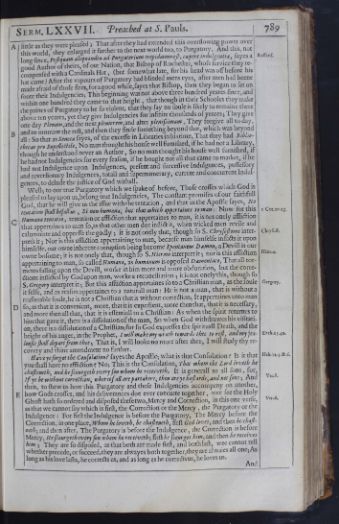 Serm. LXXVII.
Preached at S. Pauls.
789
little as they were pleased; That after they had extended this overflowing power over
Serm. LXXVII.
Preached at S. Pauls.
789
little as they were pleased; That after they had extended this overflowing power over
this world, they enlarged it farther to the next world too, to Purgatory. And this, not
long since, Postquam aliquandiu ad Purgatorium trepidatum est, cœpere indulgentiæ, Roffens. sayes a
good Author of theirs, of our Nation, that Bishop of Rochester, whose service they re-
compensed with a Cardinals Hat, (but somewhat late, for his head was off before his
hat came) After the vapours of Purgatory had blinded mens eyes, after men had beene
made afraid of those fires, for a good while, sayes that Bishop, then they began to set on
foote their Indulgencies; This beginning was not above three hundred yeares since, and
within one hundred they came to that height, that though in their Schooles they make
the paines of Purgatory to be so violent, that they say no soule is likely to remaine there
above ten yeares, yet they give Indulgencies for infinite thousands of yeares; They give
one day Plenam, and the next pleniorem, and after plenissimam, They forgive all to day,
and to morrow the rest, and then they finde something beyond that, which was beyond
all: So that as Seneca sayes, of the excesse in Libraries in his time, That they had Biblio-
thecas pro Supellectile, No man thought his house well furnished, if he had not a Library,
though he understood never an Author, So no man thought his house well furnished, if
he had not Indulgencies for every season, if he bought not all that came to market, if he
had not Indulgence upon Indulgences, present and successive Indulgences, possessory
and reversionary Indulgences, totall and supernumerary, current and concurrent Indul-
gences, to delude the justice of God withall.
Well; to our true Purgatory which we spake of before, Those crosses which God is
pleased to lay upon us, belong true Indulgencies, The constant promises of our faithfull
God, that he will give us the issue with the tentation, and that as the Apostle sayes, No
tentation shall befall us, Si non humana, but that which appertaines to man:1 Cor. 10.13. Now for this
Humana tentatio, tentation or affliction that appertaines to man, it is not onely affliction
that appertaines to man so, as that other men doe inflict it, when wicked men revile and
calumniate and oppresse the godly; it is not onely that, Chrysost. though so S. Chrysostome inter-
prets it; Nor is this affliction appertaining to man, because man himselfe inflicts it upon
himselfe, our owne inherent corruption being become Spontaneus Dæmon, a Devill in our
owne bosome; it is not onely that, though so S. Hierom interpret it;Hieron. nor is this affliction
appertaining to man, so called Humana, as humanum is opposed Dæmoniaco, That all tor-
ments falling upon the Devill, worke in him more and more obduration, but the corre-
ctions inflicted by God upon man, worke a reconciliation; it is not onely this, though so
S. Gregory interpret it; But this affliction appertaines so to a Christian man, Gregory. as the soule
it selfe, and as reason appertaines to a naturall man: He is not a man, that is without a
reasonable soule, he is not a Christian that is without correction; It appertaines unto man
so, as that it is convenient, more, that it is expedient, more then that, that it is necessary,
and more then all that, that it is essentiall to a Christian: As when the spirit returnes to
him that gave it, there is a dissolution of the man, So when God withdrawes his visitati-
on, there is a dissolution of a Christian; for so God expresses the spirituall Death, and the
height of his anger, in the Prophet, I will make my wrath towards thee to rest,Ezek. 15.42. and my jea-
lousie shall depart from thee; That is, I will looke no more after thee, I will study thy re-
covery and thine amendment no farther.
Have ye forgot the Consolation? sayes the Apostle; what is that Consolation?Heb. 12.5. & 6. Is it that
you shall have no affliction? No; This is the Consolation, That whom the Lord loveth he
chasteneth, and he scourgeth every son whom he receiveth. It is generall to all sons, for,
If ye be without correction, whereof all are partakers, then are ye bastards, and not sons;Ver. 8. And
then, to shew us how this Purgatory and these Indulgencies accompany onone another,
how Gods crosses, and his deliverances doe ever concurre together, wee see the Holy
Ghost hath so ordered and disposed these two, Mercy and Correction, in this one verse, Ver. 6.
as that we cannot say which is first, the Correction or the Mercy, the Purgatory or the
Indulgence: For first the Indulgence is before the Purgatory, The Mercy before the
Correction, in one place, Whom he loveth, he chasteneth, first God loves, and then he chast-
neth; and then after, The Purgatory is before the Indulgence, the Correction is before
Mercy, He scourgeth every son whom he receiveth; first he scourges him, and then he receives
him; They are so disposed, as that both are made first, and both last, wee cannot tell
whether precede, or succeed, they are alwayes both together, they are alwaies all one; As
long as his love lasts, he corrects us, and as long as he corrects us, he loves us. And
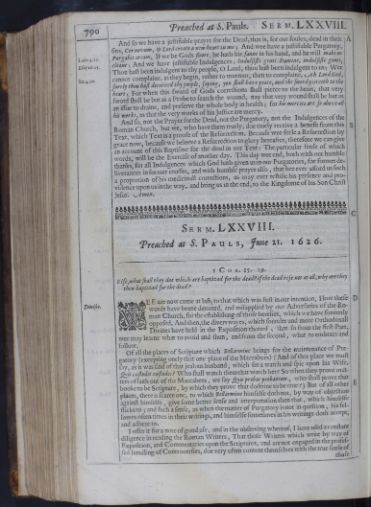 790
Preached at S. Pauls.
Serm. LXXVIII.
790
Preached at S. Pauls.
Serm. LXXVIII.
And so we have a justifiable prayer for the Dead, that is, for our soules, dead in their
sins, Cor novum, O Lord create a new heart in me; And wee have a justifiable Purgatory,
Purgabit aream, Luke 4.17. If we be Gods floore, he hath his fanne in his hand, and he will make us
cleane; And we have justifiable Indulgences, Indulsisti genti Domine, indulsisti genti, Esay 26.15.
Thou hast been indulgent to thy people, O Lord, thou hast been indulgent to us; Wee
cannot complaine, Ier. 4.10. as they begin, rather to murmur, then to complaine, Ah Lord God,
surely thou hast deceived thy people, saying, you shall have peace, and the sword pierceth to the
heart; For when this sword of Gods corrections shall pierce to the heart, that very
sword shall be but as a Probe to search the wound, nay that very wound shall be but as
an issue to draine, and preserve the whole body in health; for his mercies are so above all
his works, as that the very works of his Justice are mercy.
And so, not the Prayer for the Dead, not the Purgatory, not the Indulgences of the
Roman Church, but we, who have them truely, doe truely receive a benefit from this
Text, which Text is a proofe of the Resurrection. Because wee feele a Resurrection by
grace now, because we beleeve a Resurrection to glory hereafter, therefore we can give
an account of this Baptisme for the dead in our Text: The particular sense of which
words, will be the Exercise of another day. This day wee end, both with our humble
thanks, for all Indulgences which God hath given us in our Purgatories, for former de-
liverances in former crosses, and with humble prayer also, that hee ever afford us such
a proportion of his medicinall corrections, as may ever testifie his presence and pro-
vidence upon us in the way, and bring us in the end, to the Kingdome of his Son Christ
Jesus. Amen.
Serm. LXXVIII.
Preached at S. Pauls, June 21. 1626.
1 Cor. 15.29.
Else, what shall they doe which are baptized for the dead? if the dead rise not at all, why are they
then baptized for the dead?
WEEWe are now come at last;Divisio. to that which was first in our intention, How these
words have beene detorted, and misapplied by our Adversaries of the Ro-
man Church, for the establishing of those heresies, which we have formerly
opposed, And then, the divers wayes, which sounder and more Orthodoxall
Divines have held in the Exposition thereof; that so from the first Part,
wee may learne what to avoid and shun, and from the second, what to embrace and
follow.
Of all the places of Scripture which Bellarmine brings for the maintenance of Pur-
gatory (excepting onely that one place of the Maccabees) (And of that place we must
say, as it was said of that jealous husband, which set a watch and spie upon his Wife,
Quis custodit custodes? Who shall watch them that watch her? So when they prove mat-
ters of faith out of the Maccabees, we say Quis probat probantem, who shall prove that
booke to be Scripture, by which they prove that doctrine to be true?) But of all other
places, there is scarce one, to which Bellarmine himselfe doth not, by way of objection
against himselfe, give some better sense and interpretation then that, which himselfe
sticks to; and such a sense, as when the matter of Purgatory is not in question, his fel-
lowes often times in their writings, and himselfe sometimes in his writings doth accept,
and adhere to.
I offer it for a note of good use, and in the observing whereof, I have used a constant
diligence in reading the Roman Writers, That those Writers which write by way of
Exposition, and Commentaries upon the Scriptures, and are not engaged in the profes-
sed handling of Controversies, doe very often content themselves with the true sense of those
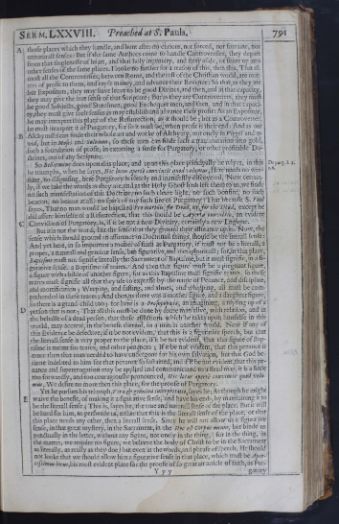 Serm. LXXVIII.
Preached at S. Pauls.
791
those places which they handle, and hunt after no curious, nor forced, nor forraine, nor
Serm. LXXVIII.
Preached at S. Pauls.
791
those places which they handle, and hunt after no curious, nor forced, nor forraine, nor
unnaturall senses: But if the same Authors come to handle Controversies, they depart
from that singlenesse of heart, and that holy ingenuity, and stray aside, or soare up into
other senses of the same places. I looke no farther for a reason of this, then this, That al-
most all the Controversies, between Rome, and the rest of the Christian world, are mat-
ters of profit to them, and rayse money, and advance their Revenue: So that, as they are
but Expositors, they may have leave to be good Divines, and then, and in that capacity,
they may give the true sense of that Scripture; But as they are Controverters, they must
be good Subjects, good Statesmen, good Exchequer men, and then, and in that capaci-
ty, they must give such senses as may establish and advance their profit: As an Expositor,
he may interpret this place of the Resurrection, as it should be; but as a Controverter,
he must interpret it of Purgatory, for so it must be, when profit is their end: And as our
Alchymists can finde their whole art and worke of Alchymy, not onely in Virgil and O-
vid, but in Moses and Solomon; so these men can finde such a transmutation into gold,
such a foundation of profit, in extorting a sense for Purgatory, or other profitable Do-
ctrines, out of any Scripture.
So Bellarmine does upon this place, and upon this place principally he relyes, De purg. l. 1.
c. 6. in this
he triumphs, when he sayes, Hic locus apertè convincit quod volumus, Here needs no wre-
sting, no disguising, here Purgatory is clearly and manifestly discovered. Now certain-
ly, if we take the words as they are, and as the Holy Ghost hath left them to us, we finde
no such manifestation of this Doctrine, no such cleare light, no such bonfire, no such
beacon, no beame at all, no spark of any such fire of Purgatory: That because S. Paul
sayes, That no man would be baptized Pro mortuis, for Dead, or, for the Dead, except he
did assure himselfe of a Resurrection, that this should be Aperta convictio, an evident
Conviction of Purgatory, is, if it be not a new Divinity, certainly a new Logique.
But it is not the word, but the sense that they ground their assurance upon. Now, the
sense which should ground an assurance in Doctrinall things, should be the literall sense:
And yet here, in so important a matter of faith as Purgatory, it must not be a literall, a
proper, a naturall and genuine sense, but figurative, and metaphoricall; for, in this place,
Baptisme must not signifie literally the Sacrament of Baptisme, but it must signifie, in a fi-
gurative sense, a Baptisme of teares. And then that figure must be a pregnant figure,
a figure with childe of another figure, for as this Baptisme must signifie teares, so these
teares must signifie all that they use to expresse by the name of Penance, and discipline,
and mortification; Weeping, and fasting, and almes, and whipping, all must be com-
prehended in these teares; And then, as there was a mother figure, and a daughter figure,
so there is a grand-child too; for here is a Prosopopœia, an imagining, a raysing up of a
person that is not; That all this must be done by some man alive, with relation, and in
the behalfe of a dead person, that these afflictions which he takes upon himselfe in this
world, may accrew, in the benefit thereof, to a man in another world. Now if any of
this Evidence be defective, if it be not evident, that this is a figurative speech, but that
the literall sense is very proper to the place, if it be not evident, that this figure of Bap-
tisme is meant for teares, and other penances; If it be not evident, that this penance is
more then that man needed to have undergone for his own salvation, but that God be-
came indebted to him for that penance so sustained, and if it be not evident, that this pe-
nance and supererogation may be applied and communicated to a dead man, it is a little
too forwardly, and too couragiously pronounced, Hic locus apertè convincit quod volu-
mus, We desire no more then this place, for the proofe of Purgatory.
Yet he pursues his triumph, Vera & genuina interpretatio, sayes he; As though he might
waive the benefit, of making it a figurative sense, and have his ends, by maintaining it to
be the literall sense; This is, sayes he, the true and naturall sense of the place. But it will
be hard for him, to perswade us, either that this is the literall sense of the place, or that
this place needs any other, then a literall sense. Since he will not allow us a figurative
sense, in that great mystery, in the Sacrament, in the Hoc est Corpus meum, but binde us
punctually in the letter, without any figure, not onely in the thing, (for in the thing, in
the matter, we require no figure, we beleeve the body of Christ to be in the Sacrament
as literally, as really as they doe) but even in the words, and phrase of speech, He should
not looke that we should allow him a figurative sense in that place, which must be Aper-
tissimus locus, his most evident place for the proofe of so great an article of faith, as Pur-
Yyy gatory
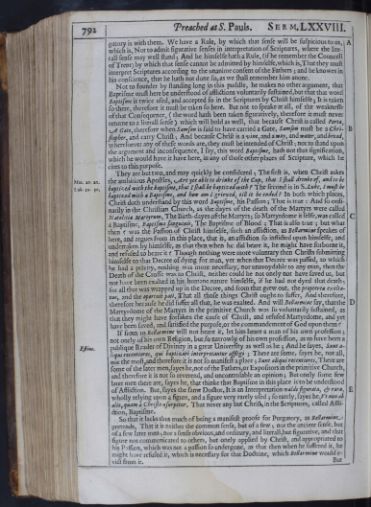 792
Preached at S. Pauls.
Serm. LXXVIII.
gatory is with them. We have a Rule, by which that sense will be suspicious to us,
792
Preached at S. Pauls.
Serm. LXXVIII.
gatory is with them. We have a Rule, by which that sense will be suspicious to us,
which is, Not to admit figurative senses in interpretation of Scriptures, where the lite-
rall sense may well stand; And he himselfe hath a Rule, (if he remember the Councell
of Trent) by which that sense cannot be admitted by himselfe, which is, That they must
interpret Scriptures according to the unanime consent of the Fathers; and he knowes in
his conscience, that he hath not done so, as we shall remember him anone.
Not to founder by standing long in this puddle, he makes no other argument, that
Baptisme must here be understood of afflictions voluntarily sustained, but that that word
Baptisme is twice used, and accepted so in the Scriptures by Christ himselfe; It is taken
so there, therefore it must be taken so here. But not to speake at all, of the weaknesse
of that Consequence, (the word hath been taken figuratively, therefore it must never
returne to a literall sense) which will hold as well, that because Christ is called Porta,
A Gate, therefore when Samson is said to have carried a Gate, Samson must be a Chri-
stopher, and carry Christ; And because Christ is a vine, and a way, and water, and bread,
wheresoever any of these words are, they must be intended of Christ; not to stand upon
the argument and inconsequence, I say, this word Baptisme, hath not that signification,
which he would have it have here, in any of those other places of Scripture, which he
cites to this purpose.
They are but two, and may quickly be considered; The first is, when Christ askes
the ambitious Apostles, Mat. 20.20. Are yee able to drinke of the Cup, that I shall drinke of, and to be
baptized with the baptisme, that I shall be baptized with? The second is in S. Luke, I must be Luk. 12.50.
baptized with a Baptisme, and how am I grieved, till it be ended? In both which places,
Christ doth understand by this word Baptisme, his Passion; That is true: And so ordi-
narily in the Christian Church, as the dayes of the death of the Martyrs were called
Natalitia Martyrum, The Birth-dayes of the Martyrs; so Martyrdome it selfe, was called
a Baptisme, Baptisma sanguinis, The Baptisme of Blood; That is also true; but what
then? was the Passion of Christ himselfe, such an affliction, as Bellarmine speakes of
here, and argues from in this place, that is, an affliction so inflicted upon himselfe, and
undertaken by himselfe, as that then when he did beare it, he might have forborne it,
and refused to beare it? Though nothing were more voluntary then Christs submitting
himselfe to that Decree of dying for man, yet when that Decree was passed, to which
he had a privity, nothing was more necessary, nor unavoydable to any man, then the
Death of the Crosse was to Christ, neither could he not onely not have saved us, but
not have been exalted in his humane nature himselfe, if he had not dyed that death;
for all that was wrapped up in the Decree, and from that grew out, the propterea exalta-
tus, and the oportuit pati, That all those things Christ ought to suffer, And therefore,
therefore because he did suffer all that, he was exalted. And will Bellarmine say, that the
Martyrdome of the Martyrs in the primitive Church was so voluntarily sustained, as
that they might have forsaken the cause of Christ, and refused Martyrdome, and yet
have been saved, and satisfied the purpose, or the commandement of God upon them?
If from us Bellarmine will not heare it, let him heare a man of his own profession;
not onely of his own Religion, but so narrowly of his own profession, as to have been a
publique Reader of Divinity in a great University as well as he;Estius. And he sayes, Sunt a-
liqui recentiores, qui baptizari interpretantur affligi; There are some, sayes he, not all,
nor the most, and therefore it is not so manifest a place; Sunt aliqui recentiores, There are
some of the later men, sayes he, not of the Fathers, or Expositors in the primitive Church,
and therefore it is not so reverend, and uncontrolable an opinion; But onely some few
later men there are, sayes he, that thinke that Baptisme in this place is to be understood
of Affliction. But, sayes the same Doctor, It is an Interpretation valde figurata, & rara,
wholly relying upon a figure, and a figure very rarely used; so rarely, sayes he, Vt non ab
alio, quam à Christo usurpetur, That never any but Christ, in the Scriptures, called Affli-
ction, Baptisme.
So that it lacks thus much of being a manifest proofe for Purgatory, as Bellarmine
pretends, That it is neither the common sense, but of a few; nor the ancient sense, but
of a few later men; nor a sense obvious, and ordinary, and literall, but figurative, and that
figure not communicated to others, but onely applied by Christ, and appropriated to
his Passion, which was not a passion so undergone, as that then when he suffered it, he
might have refused it, which is necessary for that Doctrine, which Bellarmine would e-
vict from it. But
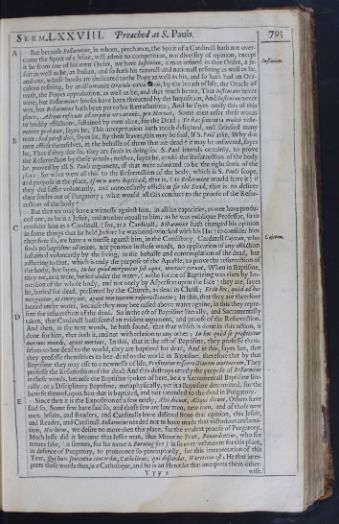 Serm. LXXVIII.
Preached at S. Pauls.
793
Serm. LXXVIII.
Preached at S. Pauls.
793
But because Bellarmine, in whom, perchance, the Spirit of a Cardinall hath not over-
come the Spirit of a Jesuit, will admit no competition, nor diversity of opinion, except
it be from one of his own Order, we have Iustinian, a man refined in that Order, Iustinian. a Je-
suit as well as he, an Italian, and so hath his naturall and nationall refining as well as he,
and one, whose books are dedicated to the Pope as well as his, and so hath had an Ora-
culous refining, by an allowance Oraculo vivæ vocis, by the breath of life, the Oracle of
truth, the Popes approbation, as well as he, and thus much better, That Iustinians never
were, but Bellarmines books have been threatned by the Inquisition, And Iustinian never
was, but Bellarmine hath been put to his Retractations; And he sayes onely this of this
place, Aliqui referunt ad corporis vexationes, pro Mortuis, Some men refer these words
to bodily afflictions, sustained by men alive, for the Dead; Et hæc sententia multis vehe-
menter probatur, sayes he, This interpretation hath much delighted, and satisfied many
men: Sed potest dici, sayes he, By their leaves, this may be said, If S. Paul aske, Why doe
men afflict themselves, in the behalfe of them that are dead? it may be answered, sayes
he, That if they doe so, they are fools in doing so. S. Paul intends certainly, to prove
the Resurrection by these words; neither, sayes he, could the Resurrection of the body
be proved by all S. Pauls argument, if that were admitted to be the right sense of the
place; for what were all this to the Resurrection of the body, which is S. Pauls scope,
and purpose in the place, If men were baptized, that is, (as Bellarmine would have it) if
they did suffer voluntarily, and unnecessarily affliction for the Dead, that is, to deliver
their soules out of Purgatory; what would all this conduce to the proofe of the Resur-
rection of the body?
But that we may have a witnesse against him, in all his capacities, as wee have produ-
ced one, as he is a Jesuit, and another equall to him, as he was publique Professor, so to
consider him as a Cardinall, (for, as a Cardinall, Bellarmine hath changed his opinion
in some things that he held, before he was hood-wincked with his Hat) to consider him
therefore so, we have a witnesse against him, in the Consistory, Cardinall Cajetan, Cajetan. who
finds no baptisme of teares, nor penance in these words, no application of any affliction
sustained voluntarily by the living, in the behalfe and contemplation of the dead, but
adhering to that, which is truly the purpose of the Apostle, to prove the resurrection of
the body, hee sayes, In hoc quòd merguntur sub aqua, mortuos gerunt, When in Baptisme,
they are, as it were, buried under the water, (as the forme of Baptizing was then by Im-
mersion of the whole body, and not onely by Aspersion upon the face) they are, sayes
he, buried for dead, presented by the Church, as dead in Christ; Et in hoc, quòd ad hoc
merguntur, ut emergant, agunt mortuorum resurrectionem; In this, that they are therefore
buried under water, because they may bee raised above water againe, in this they repre-
sent the resurrection of the dead. So in the act of Baptisme literally, and Sacramentally
taken, that Cardinall hath found an evident argument, and proofe of the Resurrection.
And then, in the next words, he hath found, that that which is done in this action, is
done for him, that doth it, and not with relation to any other; In hoc quòd se profitentur
mortuos mundo, agunt mortuos, In this, that in the act of Baptisme, they professe them-
selves to bee dead to the world, they are baptized for dead, And in this, sayes hee, that
they professe themselves to bee dead to the world in Baptisme, therefore that by that
Baptisme they may rise to a newnesse of life, Profitentur resurrectionem mortuorum, They
professe the Resurrection of the dead: And this destroys utterly the purpose of Bellarmine
in these words, because the Baptisme spoken of here, be it a Sacramentall Baptisme lite-
rally, or a Disciplinary Baptisme, metaphysically, yet is a Baptisme determined, for the
benefit thereof, upon him that is baptized, and not extended to the dead in Purgatory.
Since then it is the Exposition of a few onely, Alii dicunt, Aliqui dicunt, Others have
said so, Some few have said so, and those few are late men, new men, and of those new
men, Jesuits, and Readers, and Cardinalls have differed from that opinion, this Jesuit,
and Reader, and Cardinall Bellarmine needed not to have made that victorious acclama-
tion, Hic locus, we desire no more then this place, for the evident proofe of Purgatory.
Much lesse did it become that lesser man, that Minorite Frier, Feuardentius, who for
names sake, (it seemes, for his name is Burning fire) is so over-vehement for this place,
in defence of Purgatory, to pronounce so peremptorily, for this interpretation of this
Text, Qui huic sententiæ concordat, Catholicus, qui discordat, Hæreticus est; He that inter-
prets these words thus, is a Catholique, and he is an Heretike that interprets them other-
Yyy2 wise.
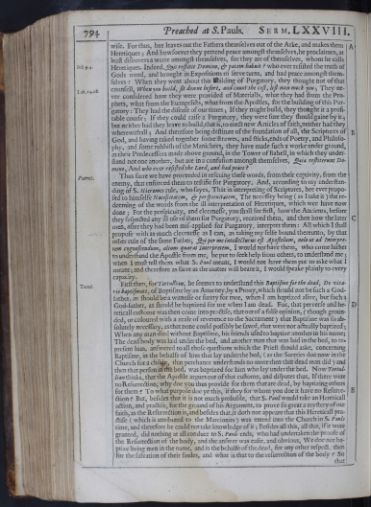 794
Preached at S. Pauls.
Serm. LXXVIII.
wise. For thus, hee leaves out the Fathers themselves out of the Arke, and makes them
794
Preached at S. Pauls.
Serm. LXXVIII.
wise. For thus, hee leaves out the Fathers themselves out of the Arke, and makes them
Heretiques; And howsoever they pretend peace amongst themselves, he proclaimes, at
least discovers a warre amongst themselves, for they are of themselves, whom he calls
Heretiques.Iob 9.4. Indeed, Quis restitit Domino, & pacem habuit? who ever resisted the truth of
Gods word, and brought in Expositions to serve turns, and had peace amongst them-
selves? When they went about this building of Purgatory, they thought not of that
counsell, Luk. 14.28. When you build, sit downe before, and count the cost, lest men mock you; They ne-
ver considered how they were provided of Materialls, what they had from the Pro-
phets, what from the Euangelists, what from the Apostles, for the building of this Pur-
gatory: They had the disease of our times; If they might build, they thought it a profi-
table course; If they could raise a Purgatory, they were sure they should gaine by it;
but neither had they leave to build, that is, to erect new Articles of faith, neither had they
wherewithall; And therefore being destitute of the foundation of all, the Scriptures of
God, and having raked together some strawes, and sticks, ends of Poetry, and Philoso-
phy, and some rubbish of the Manichees, they have made such a worke under ground,
as their Predecessors made above ground, in the Towre of Babell, in which they under-
stand not one another, but are in a confusion amongst themselves, Quia restiterunt Do-
mino, And who ever resisted the Lord, and had peace?
Thus farre we have proceeded in rescuing these words, Patres. from their captivity, from the
enemy, that enforced them to testifie for Purgatory. And, according to my understan-
ding of S. Hieromes rule, who sayes, That in interpreting of Scriptures, hee ever propo-
sed to himselfe Necessitatem, & perspicuitatem, The necessity being (as I take it) the re-
deeming of the words from the ill interpretation of Heretiques, which wee have now
done; For the perspicuity, and cleernesse, you shall see first, how the Ancients, before
they suspected any ill use of them for Purgatory, received them, and then how the later
men, after they had been mis-applied for Purgatory, interpret them: All which I shall
propose with as much cleernesse as I can, as taking my selfe bound thereunto, by that
other rule of the same Father, Qui per me intellecturus est Apostolum, nolo ut ad Interpre-
tem cognoscendum, alium quærat Interpretem, I would not have them, who come hither
to understand the Apostle from me, be put to seek help from others, to understand me;
when I must tell them what S. Paul meant, I would not have them put to aske what I
meant; and therefore as farre as the matter will beare it, I would speake plainly to every
capacity.
First then, Tertul. for Tertullian, he seemes to understand this Baptisme for the dead, De vica-
rio baptismate, of Baptisme by an Atturney, by a Proxy, which should not be such a God-
father, as should be a witnesse or surety for mee, when I am baptized alive, but such a
God-father, as should be baptized for me when I am dead. For, that perverse and he-
reticall custome was then come into practise, that out of a false opinion, (though groun-
ded, or coloured with a zeale of reverence to the Sacrament) that Baptisme was so ab-
solutely necessary, as that none could possibly be saved, that were not actually baptized;
When any man died without Baptisme, his friends used to baptize another in his name;
The dead body was laid under the bed, and another man that was laid in the bed, to re-
present him, answered to all those questions which the Priest should aske, concerning
Baptisme, in the behalfe of him that lay under the bed, (as the Sureties doe now in the
Church for a childe, that perchance understands no more then that dead man did) and
then that person in the bed, was baptized for him who lay under the bed. Now Tertul-
lian thinks, that the Apostle argues out of that custome, and disputes thus, If there were
no Resurrection, why doe you thus provide for them that are dead, by baptizing others
for them? To what purpose doe ye this, if they for whom you doe it have no Resurre-
ction? But, besides that it is not much probable, that S. Paul would take an Hereticall
action, and practise, for the ground of his Argument, to prove so great a mystery of our
faith, as the Resurrection is, and besides that, it doth not appeare that this Hereticall pra-
ctise (which is attributed to the Marcionits) was entred into the Church in S. Pauls
time, and therefore he could not take knowledge of it; Besides all this, all this, if it were
granted, did nothing at all conduce to S. Pauls ends, who had undertaken the proofe of
the Resurrection of the body, and the answer was easie, and obvious, We doe not ba-
ptize living men in the name, and in the behalfe of the dead, for any other respect, then
for the salvation of their soules, and what is that to the resurrection of the body? So that
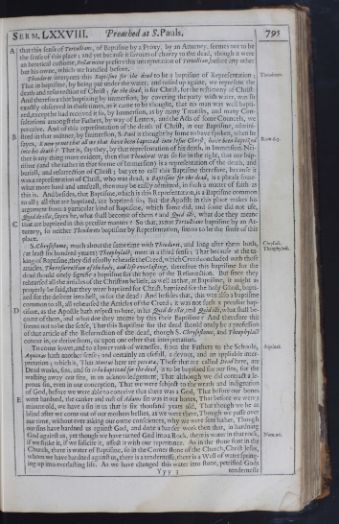 Serm. LXXVIII.
Preached at S. Pauls.
795
that this sense of Tertullians, of Baptisme by a Proxy, by an Atturney, seemes not to be
Serm. LXXVIII.
Preached at S. Pauls.
795
that this sense of Tertullians, of Baptisme by a Proxy, by an Atturney, seemes not to be
the sense of this place; and yet because it savours of charity to the dead, though it were
an heretical custome, Bellarmine prefers this interpretation of Tertullian, before any other
but his owne, which we handled before.
Theodoret interprets this Baptisme for the dead to be a baptisme of Representation;Theodoret.
That in baptisme, by being put under the water, and raised up againe, we represent the
death and resurrection of Christ; for the dead, is for Christ, for the testimony of Christ:
And therefore that baptizing by immersion, by covering the party with water, was so
exactly observed in those times, as it came to be thought, that no man was well bapti-
zed, except he had received it so, by Immersion, as by many Treatises, and many Con-
sultations amongst the Fathers, by way of Letters, and the Acts of some Councels, we
perceive. And of this representation of the death of Christ, in our Baptisme, admini-
stred in that manner, by Immersion, S. Paul is thought by some to have spoken, when he
sayes, Know ye not that all we that have been baptized into Iesus Christ,Rom. 6.3. have been baptized
into his death? That is, say they, by that representation of his death, in Immersion. Nei-
ther is any thing more evident, then that Theodoret was so far in the right, that our bap-
tisme (and the rather in that forme of Immersion) is a representation of the death, and
buriall, and resurrection of Christ; but yet to call this Baptisme therefore, because it
was a representation of Christ, who was dead, a Baptisme for the dead, is a phrase some-
what more hard and unusuall, then may be easily admitted, in such a matter of faith as
this is. And besides, that Baptisme, which is this Representation, is a Baptisme common
to all; all that are baptized, are baptized so; But the Apostle in this place makes his
argument from a particular kind of Baptisme, which some did, and some did not use,
Quid de illis, sayes he, what shall become of them? and Quid illi, what doe they meane
that are baptized in this peculiar manner? So that, as not Tertullians baptisme by an At-
turney, so neither Theodorets baptisme by Representation, seems to be the sense of this
place.
S. Chrysostome, much about the same time with Theodoret, and long after them both, Chrysost.
Theophylact.
(at least six hundred yeares) Theophylact, meet in a third sense; That because at the ta-
king of Baptisme, they did usually rehearse the Creed, which Creed concluded with those
articles, The resurrection of the body, and life everlasting, therefore this baptisme for the
dead should onely signifie a baptisme for the hope of the Resurrection. But since they
rehearsed all the articles of the Christian beliefe, as well as that, at Baptisme, it might as
properly be said, that they were baptized for Christ; baptized for the holy Ghost, bapti-
zed for the descent into hell, as for the dead: And besides that, this was also a baptisme
common to all, all rehearsed the Articles of the Creed; it was not such a peculiar bap-
tisme, as the Apostle hath respect to here, in his Quid de illis, and Quid illi, what shall be-
come of them, and what doe they meane by this their Baptisme? And therefore this
seems not to be the sense, That this Baptisme for the dead should onely be a profession
of that article of the Resurrection of the dead, though S. Chrysostome, and Theophylact
concur in, or derive from, or upon one other that interpretation.
To come lower, and to a lower rank of witnesses, from the Fathers to the Schoole, Aquinas.
Aquinas hath another sense; and certainly an usefull, a devout, and an appliable inter-
pretation; which is, That Mortui here are peccata, Those that are called Dead here, are
Dead works, sins, and so to be baptized for the dead, is to be baptized for our sins, for the
washing away our sins, in an acknowledgement, That although we did contract a le-
prous sin, even in our conception, That we were subject to the wrath and indignation
of God, before we were able to conceive that there was a God, That before our bones
were hardned, the canker and rust of Adams sin was in our bones, That before we were a
minute old, we have a sin in us that is six thousand years old, That though we be as
blind after we come out of our mothers bellies, as we were there, Though we passe over
our time, without ever asking our owne consciences, why we were sent hither, Though
our sins have hardned us against God, and done a harder work then that, in hardning
God against us, yet though we have turned God into a Rock, there is water in that rock, Num. 20.
if we strike it, if we solicite it, affect it with our repentance. As in the stone font in the
Church, there is water of Baptisme, so in the Corner stone of the Church, Christ Jesus,
whom we have hardned against us, there is a tendernesse, there is a Well of water spring-
ing up into everlasting life. As we have changed this water into stone, petrified Gods Yyy3 tendernesse
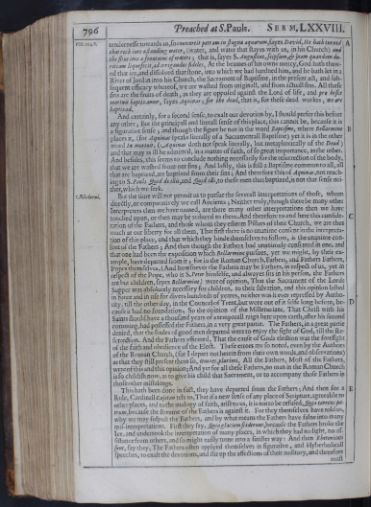 796
Preached at S. Pauls.
Serm. LXXVIII.
tendernesse towards us, Psal. 114.8. so convertit petram in stagna aquarum, sayes David, He hath turned
796
Preached at S. Pauls.
Serm. LXXVIII.
tendernesse towards us, Psal. 114.8. so convertit petram in stagna aquarum, sayes David, He hath turned
that rock into a standing water, (water, and water that stayes with us, in his Church) and
the flint into a fountaine of waters; that is, sayes S. Augustine, seipsum, & suam quandam du-
ritiam liquefecit, ad irrigandos fideles, At the beames of his owne mercy, God hath thaw-
ed that ice, and dissolved that stone, into which we had hardned him, and he hath let in a
River of Jordan into his Church, the Sacrament of Baptisme, in the present act, and sub-
sequent efficacy whereof, we are washed from originall, and from actuall sins. All these
sins are the fruits of death, as they are opposed against the Lord of life, and pro hisce
mortuis baptizamur, sayes Aquinas; for the dead, that is, for these dead workes, we are
baptized.
And certainly, for a second sense, to exalt our devotion by, I should prefer this before
any other; But the principall and literall sense of this place, this cannot be, because it is
a figurative sense; and though the figure be not in the word Baptisme, where Bellarmine
places it, (for Aquinas speaks literally of a Sacramentall Baptisme) yet it is in the other
word In mortuis, (Aquinas doth not speak literally, but metaphorically of the Dead)
and that may as ill be admitted, in a matter of faith, of so great importance, as the other.
And besides, this seems to conclude nothing necessarily for the resurrection of the body,
that we are washed from our sins; And lastly, this is still a Baptisme common to all, all
that are baptized, are baptized from their sins; And therefore this of Aquinas, not reach-
ing to S. Pauls Quid de illis, and Quid illi, to these men thus baptized, is not that sense nei-
ther, which we seek.
But the time will not permit us to pursue the severall interpretations of those, Moderni. whom
directly, or comparatively we call Ancients; Neither truly, though there be many other
Interpreters then we have named, are there many other interpretations then we have
touched upon, or then may be reduced to them. And therefore to end here this conside-
ration of the Fathers, and those whom they esteem Pillars of their Church, we are thus
much at our liberty for all them, That first there is no unanime consent in the interpreta-
tion of this place, and that which they binde themselves to follow, is the unanime con-
sent of the Fathers; And then though the Fathers had unanimely consented in one, and
that one had been the exposition which Bellarmine pursues, yet we might, by their ex-
ample, have departed from it; for in the Roman Church, Fathers, and Fathers Fathers,
Popes themselves, (And howsoever the Fathers may be Fathers, in respect of us, yet in
respect of the Pope, who is S. Peter himselfe, and alwayes sits in his person, the Fathers
are but children, sayes Bellarmine) were of opinion, That the Sacrament of the Lords
Supper was absolutely necessary for children, to their salvation, and this opinion lasted
in force and in use for divers hundreds of yeares, neither was it ever repressed by Autho-
rity, till the other day, in the Councel of Trent, but wore out of it selfe long before, be-
cause it had no foundation; So the opinion of the Millenarians, That Christ with his
Saints should have a thousand years of a temporall raign here upon earth, after his second
comming, had possessed the Fathers, in a very great partie. The Fathers, in a great partie
denied, that the soules of good men departed were to enjoy the sight of God, till the Re-
surrection. And the Fathers affirmed, That the cause of Gods election was the foresight
of the faith and obedience of the Elect. These errors are so noted, even by the Authors
of the Roman Church, (for I depart not herein from their own words, and observations)
as that they still present them so, Omnes, plurimi, All the Fathers, Most of the Fathers,
were of this and this opinion; And yet for all these Fathers, no man in the Roman Church
is so childish now, as to give his child that Sacrament, or to accompany those Fathers in
those other mistakings.
This hath been done in fact, they have departed from the Fathers; And then for a
Rule, Cardinall Cajetan tels us, That if a new sense of any place of Scripture, agreeable to
other places, and to the analogy of faith, arise to us, it is not to be refused, Quia torrens pa-
trum, because the streame of the Fathers is against it. For they themselves have told us,
why we may suspect the Fathers, and by what means the Fathers have falne into many
mis-interpretations. First they say, Quia glaciem sciderunt, because the Fathers broke the
Ice, and undertook the interpretation of many places, in which they had no light, no as-
sistance from others, and so might easily turne into a sinister way: And then Rhetoricati
sunt, say they, The Fathers often applyed themselves in figurative, and Hyberbolicall
speeches, to exalt the devotions, and stir up the affections of their auditory, and therefore must
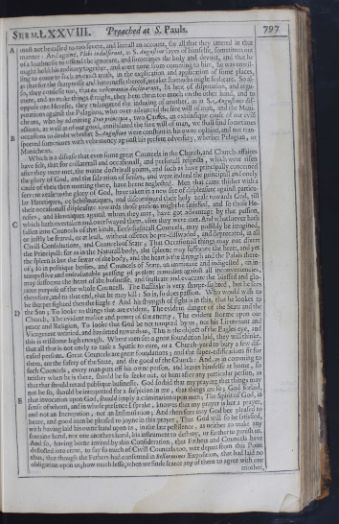 Serm. LXXVIII.
Preached at S. Pauls.
797
must not be called to too severe, and literall an account, for all that they uttered in that
Serm. LXXVIII.
Preached at S. Pauls.
797
must not be called to too severe, and literall an account, for all that they uttered in that
manner: And againe, Plebi indulserunt, as S. Augustine sayes of himselfe, sometimes out
of a loathnesse to offend the ignorant, and sometimes the holy and devout, and that he
might hold his auditory together, and avert none from comming to him, he was unwil-
ling to come to such an exact truth, in the explication and application of some places,
as that for the sharpnesse and bitternesse thereof, weaker stomachs might forbeare. So al-
so, they confesse too, that ex vehementia declinarunt, In heat of disputation, and argu-
ment, and to make things straight, they bent them too much on the other hand, and to
oppose one Heresie, they endangered the inducing of another, as in S. Augustines dis-
putations against the Pelagians, who over-advanced the free will of man, and the Mani-
cheans, who by admitting Duo principia, two Causes, an extrinsique cause of our evill
actions, as well as of our good, annihilated the free will of man, we shall find sometimes
occasions to doubt whether S. Augustine were constant in his owne opinion, and not tran-
sported sometimes with vehemency against his present adversary, whether Pelagian, or
Manichean.
Which is a disease that even some great Councels in the Church, and Church-affaires
have felt, that for collaterall and occasionall, and personall respects, which were risen
after they were met, the maine doctrinall points, and such as have principally concerned
the glory of God, and the salvation of soules, and were indeed the principall and onely
cause of their then meeting there, have beene neglected. Men that came thither with a
fervent zeale to the glory of God, have taken in a new fire of displeasure against particu-
lar Heretiques, or Schismatiques, and discontinued their holy zeale towards God, till
their occasionall displeasure towards those persons might be satisfied, and so those He-
resies, and Heretiques against whom they met, have got advantage by that passion,
which hath overtaken and overswayed them, after they were met. And whatsoever hath
fallen into Councels of that kinde, Ecclesiasticall Councels, may possibly be imagined,
or justly be feared, or at least, without offence be pre-disswaded, and deprecated, in all
Civill Consultations, and Councels of State, That Occasionall things may not divert
the Principall: for as in the Naturall body, the spleene may suffocate the heart, and yet
the spleen is but the sewar of the body, and the heart is the strength and the Palais there-
of; so in politique bodies, and Councels of State, an immature and indigested, an in-
tempestive and unseasonable pressing of present remedies against all inconveniencies,
may suffocate the heart of the businesse, and frustrate and evacuate the blessed and glo-
rious purpose of the whole Councell. The Basiliske is very sharpe-sighted, but he sees
therefore, and to that end, that he may kill: So is, so does passion. Who would wish to
be sharper sighted then the Eagle? And his strength of sight is in this, that he lookes to
the Sun; To looke to things that are evident, The evident danger of the State and the
Church, The evident malice and power of the enemy, The evident storme upon our
peace and Religion, To looke that God be not tempted by us, nor his Lieutenant and
Vicegerent wearied, and hardened towards us, This is the object of the Eagles eye, and
this is wisdome high enough. Where men see a great foundation laid, they will thinke,
that all that is not onely to raise a Spittle to cure, or a Church-yard to bury a few dis-
eased persons. Great Councels are great foundations; and the super-edifications fit for
them, are the safety of the State, and the good of the Church: And, as in comming to
such Councels, every man puts off his owne person, and leaves himselfe at home, so
neither when he is there, should he so seeke out, or hunt after any particular person, as
that that should retard publique businesse. God forbid that my praying that things may
not be so, should be interpreted for a suspicion in me, that things are so; God forbid,
that invocation upon God, should imply a crimination upon men; The Spirit of God, in
sense of whom, and in whose presence I speake, knowes that my prayer is but a prayer,
and not an Increpation, not an Insimulation; And therefore may God bee pleased to
heare, and good men be pleased to joyne in this prayer, That God will so be satisfied,
with having laid his owne hand upon us, in the late pestilence, as neither to make any
forraine hand, nor one anothers hand, his instrument to destroy, or farther to punish us.
And so, having beene invited by this Consideration, that Fathers and Councels have
deflected into error, to say so much of Civill Councels too, wee depart from this Point
thus, that though the Fathers had consented in Bellarmines Exposition, that had laid no
obligation upon us; how much lesse, when we finde scarce any of them to agree with one another,
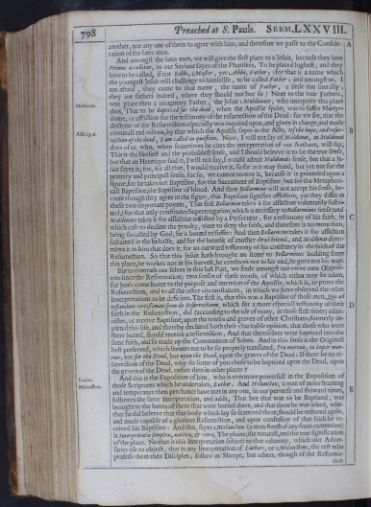 798
Preached at S. Pauls.
Serm. LXXVIII.
another, nor any one of them to agree with him; and therefore we passe to the Conside-
798
Preached at S. Pauls.
Serm. LXXVIII.
another, nor any one of them to agree with him; and therefore we passe to the Conside-ration of the later men.
And amongst the later men, we will give the first place to a Jesuit, because they love
Primos accubitus, as our Saviour sayes of the Pharisees, To be placed highest, and they
love to be called, if not Rabbi, Master, yet Abba, Father; (for that is a name which
the youngest Jesuit will challenge to himsellfe, to be called Father; and amongst us, I
am afraid, they come to that name, the name of Father, a little too literally,
they are fathers indeed, where they should not bee so) Next to the true Fathers,
wee place then a imaginary Father, Maldonat. the Jesuit Maldonate, who interprets this place
thus, That to be baptized for the dead, when the Apostle spake, was to suffer Martyr-
dome, or affliction for the testimony of the resurrection of the Dead: for we see, that the
doctrine of the Resurrection especially was inquired upon, and given in charge, and made
criminall and odious, Acts 23.6. by that which the Apostle sayes in the Acts, Of the hope, and resur-
rection of the dead, I am called in question. Now, I will not say of Maldonat, as Maldonat
does of us, who, when sometimes he cites the interpretation of our Authors, will say,
This is the likeliest and the probablest sense, and I should beleeve it to be the true sense,
but that an Heretique said it; I will not say, I would admit Maldonats sense, but that a Je-
suit sayes it; for, for all that, I would receive it, so far as it may stand, but yet not for the
primary and principall sense; for so, we cannot receive it, because it is grounded upon a
figure, for he takes not Baptisme, for the Sacrament of Baptisme, but for the Metaphori-
call Baptisme, the Baptisme of blood. And then Bellarmine will not accept his sense, be-
cause though they agree in the figure, that Baptisme signifies affliction, yet they differ in
these two important poynts, That first BellarminBellarmine takes it for affliction voluntarily sustai-
ned, (for that only constitutes Supererogation, which is necessary to Bellarmines sense) and
Maldonate takes it for affliction inflicted by a Persecutor, for a testimony of his faith, in
which case to decline the penalty, were to deny the faith, and therefore is no more then,
being so called by God, he is bound to suffer: And then Bellarmine takes it for affliction
sustained in the behalfe, and for the benefit of another dead friend, and Maldonat deter-
mines it in him that does it, for an outward testimony of his constancy in the faith of the
Resurrection. So that this Jesuit hath brought no stone to Bellarmines building from
this place, he workes not in his harvest, he conduces not to his end, he goes not his way.
But to contract our selves in this last Part, we finde amongst our owne men (Exposi-
tors since the Reformation) two senses of these words, of which either may be taken,
for both come home to the purpose and intention of the Apostle, which is, to prove the
Resurrection, and to all the other circumstances, in which we have observed the other
Interpretations to be deficient. The first is, that this was a Baptisme of those men, Qui ad
testandam certissiman spem de Resurrectione, which for a more especiall testimony of their
faith in the Resurrection, did (according to the use of many, in those first times) admi-
nister, or receive Baptisme, upon the tombs and graves of other Christians, formerly de-
parted this life, and thereby declared both their charitable opinion, that those who were
there buried, should receive a resurrection, And that themselves were baptized into the
same faith, and so made up the Communion of Saints. And in this sense is the Originall
best preserved, which seemes not to be so properly translated, Pro mortuis, as Super mor-
tuos, not for the Dead, but upon the Dead, upon the graves of the Dead: If there be no re-
surrection of the Dead, why do some of you chuse to be baptized upon the Dead, upon
the graves of the Dead, rather then in other places?
And this is the Exposition of him, Luther.
Melancton. who is evermore powerfull in the Exposition of
those Scriptures which he undertakes, Luther. And Melancton, a man of more learning
and temperance then perchance have met in any one, in our perverse and froward times,
followes the same Interpretation, and adds, That hee that was to be Baptized, was
brought to the bones of them that were buried there, and that there he was asked, whe-
ther he did beleeve that that body which lay so scattered there, should be restored again,
and made capable of a glorious Resurrection, and upon confession of that faith he re-
ceived his Baptisme: And this, sayes Melancton (a man freest of any from contention)
is Interpretatio simplex, nativa, & vera, The plaine, the naturall, and the true signification
of the place. Neither is this Interpretation subject to that calumny, which our Adver-
saries use to object, that in any Interpretation of Luthers, or Melanctons, the rest who
professe them their Disciples, follow as Sheepe, but others, though of the Reforma-
tion
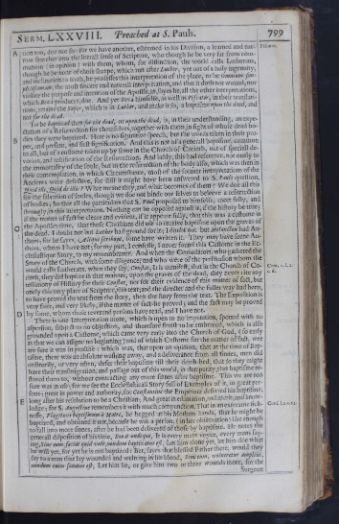 Serm. LXXVIII.
Preached at S. Pauls.
799
tion too, doe not so: for we have another, esteemed in his Division, Piscator. a learned and nar-
Serm. LXXVIII.
Preached at S. Pauls.
799
tion too, doe not so: for we have another, esteemed in his Division, Piscator. a learned and nar-row searcher into the literall sense of Scripture, who though he be very far from com-
munion (in opinion) with them, whom, for distinction, the world calls Lutherans,
though he be none of those sheepe, which run after Luther, yet out of a holy ingenuity,
and inclination to truth, he professes this interpretation of the place, to be Omnium sim-
plicissimam, the most sincere and naturall interpretation, and that it doth not wound, nor
violate the purpose and intention of the Apostle, as, sayes he, all the other interpretations,
which Beza produces, doe. And yet Beza himselfe, as well as Piscator, in their translati-
tions, retaine the Super, which is in Luther, and make it so, a baptisme upon the dead, and
not for the dead.
To be baptized then for the dead, or upon the dead, is, in their understanding, an expe-
ctation of a Resurrection for themselves, together with them, in sight of whose dead bo-
dies they were baptized. Here is no figurative speech, but the words taken in their pro-
per, and present, and first signification. And this is not of a generall baptisme, common
to all, but of a custome taken up by some in the Church of Corinth, out of speciall de-
votion, and testification of the Resurrection. And lastly, this had reference, not onely to
the immortality of the soule, but to the resurrection of the body also, which was then in
their contemplation, in which Circumstance, most of the former interpretations of the
Ancients were defective, for still it might have been answered to S. Pauls question,
Quid illi, Quid de illis? What meane they, and what becomes of them? We doe all this
for the salvation of soules, though we doe not binde our selves to beleeve a resurrection
of bodies; So that all the particulars that S. Paul proposed to himselfe, meet fully, and
strongly, in this interpretation. Nothing can be opposed against it, if the history be true;
if the matter of fact be cleare and evident, if it appeare fully, that this was a custome in
the Apostles time, that those Christians did use to receive baptisme upon the graves of
the dead. I doubt not but Luther had ground for it; I doubt not but Melancton had Au-
thors; for he sayes, Aliqui scribunt, some have written it. They may have seene Au-
thors, whom I have not; for my part, I confesse, I never found this Custome in the Ec-
clesiastique Story, to my remembrance. And when the Centuriators, who gathered the
Story of the Church, with some diligence, and who were of the perswasion whom the
world calls Lutherans, when they say, Constat, It is manifest, that in the Church of Cent. 1. l. 2.
c. 6. Co-
rinth, they did baptize in that manner, upon the graves of the dead, they never cite any
testimony of History for their Constat, nor for their evidence of this matter of fact, but
onely this very place of Scripture, this text; and the directer and the fuller way had been,
to have proved the text from the story, then the story from the text. The Exposition is
very faire, and very likely, if the matter of fact be proved; and the fact may be proved
by some, whom those reverend persons have read, and I have not.
There is one Interpretation more, which is open to no imputation, spotted with no
aspersion, subject to no objection, and therefore fittest to be embraced, which is also
grounded upon a Custome, which came very early into the Church of God, (so early
as that we can assigne no beginning) and of which Custome for the matter of fact, wee
are sure it was in practise: which was, that upon an opinion, that at the time of Bap-
tisme, there was an absolute washing away, and a deliverance from all sinnes, men did
ordinarily, or very often, defer their baptisme till their death-bed, that so they might
have their transmigration, and passage out of this world, in that purity, that baptisme re-
stored them to, without contracting any more sinnes after baptisme. This we are too
sure was in use; for we see the Ecclesiasticall Story full of Examples of it, in great per-
sons; great in power and authority, for Constantine the Emperour deferred his baptisme,
long after his resolution to be a Christian; And great in estimation, and merit, and know-
ledge; for S. Augustine remembers it with much compunction, That in an extreame Conf. l. 1. c. 11. sick-
nesse, Flagitavi baptismum à Matre, he begged at his Mothers hands, that he might be
baptized, and obtained it not, because he was a person, (in her observation) like enough
to fall into more sinnes, after he had been delivered of those by baptisme. He notes the
generall disposition of his time, Sonat undique, It is every mans voyce, every mans say-
ing, Sine eum, faciat quid vult, nondum baptizatus est, Let him alone yet, let him doe what
he will yet, for yet he is not baptized: But, sayes that blessed Father there, would they
say to a man that lay wounded and weltring in his blood, Sine eum, vulneretur ampliùs,
nondum enim sanatus est, Let him lie, or give him two or three wounds more, for the Surgeon
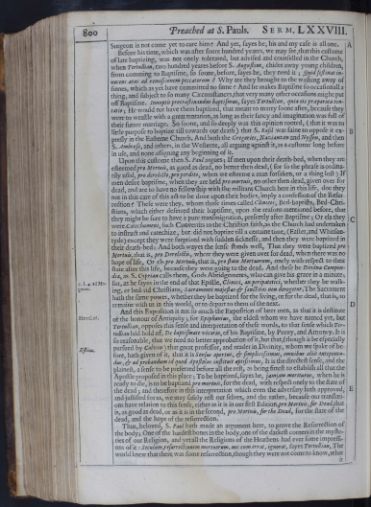 800
Preached at S. Pauls.
Serm. LXXVIII.
Surgeon is not come yet to cure him? And yet, sayes he, his and my case is all one.
800
Preached at S. Pauls.
Serm. LXXVIII.
Surgeon is not come yet to cure him? And yet, sayes he, his and my case is all one.
Before his time, which was after foure hundred yeares, we may see, that this custome
of late baptizing, was not onely tolerated, but advised and counselled in the Church,
when Tertullian, two hundred yeares before S. Augustine, chides away young children,
from comming to Baptisme, so soone, before, sayes he, they need it; Quid festinat in-
nocens ætas ad remissionem peccatorum? Why are they brought to the washing away of
sinnes, which as yet have committed no sinne? And he makes Baptisme so occasionall a
thing, and subject to so many Circumstances, that very many other occasions might put
off Baptisme. Innuptis procrastinandus baptismus, sayes Tertullian, quia eis præparata ten-
tatio; He would not have them baptized, that meant to marry soone after, because they
were to wrastle with a great tentation, as long as their fancy and imagination was full of
their future marriage. So soone, and so deeply was this opinion rooted, (that it was to
little purpose to baptize till towards our death) that S. Basil was faine to oppose it ex-
presly in the Easterne Church, And both the Gregories, Nazianzen and Nyssen, and then
S. Ambrose, and others, in the Westerne, all arguing against it, as a custome long before
in use, and none assigning any beginning of it.
Upon this custome then S. Paul argues; If men upon their death-bed, when they are
esteemed pro Mortuis, as good as dead, no better then dead, (for so the phrase is ordina-
rily used, pro derelicto, pro perdito, when we esteeme a man forsaken, or a thing lost) If
men desire baptisme, when they are held pro mortuis, no other then dead, given over for
dead, and are to have no fellowship with the militant Church here in this life, doe they
not in this care of this act to be done upon their bodies, imply a confession of the Resur-
rection? These were they, whom those times called Clinicos, Bed-baptists, Bed-Chri-
stians, which either deferred their baptisme, upon the reasons mentioned before, that
they might be sure to have a pure transmigration, presently after Baptisme; Or els they
were Catechumeni, such Convertits to the Christian faith, as the Church had undertaken
to instruct and catechize, but did not baptize till a certaine time, (Easter, and Whitson-
tyde) except they were surprized with sudden sicknesse, and then they were baptized in
their death-bed: And both wayes the sense stands well, That they were baptized pro
Mortuis, that is, pro Derelictis, where they were given over for dead, when there was no
hope of life, Or els pro Mortuis, that is, pro statu Mortuorum, onely with respect to their
state after this life, because they were going to the dead. And these be Divina Compen-
dia, as S. Cyprian calls them, Gods Abridgements, who can give his grace in a minute;
for, 7. l. 4. 2d Ma-
gnum. as he sayes in the end of that Epistle, Clinici, an peripatetici, whether they be walk-
ing, or bed-rid Christians, Sacramenti majestas & sanctitas non derogetur, The Sacrament
hath the same power, whether they be baptized for the living, or for the dead, that is, to
remaine with us in this world, or to depart to them of the next.
And this Exposition is not so much the Exposition of later men, as that it is destitute
of the honour of Antiquity;Hæres. 28. for Epiphanius, the eldest whom we have named yet, but
Tertullian, opposes this sense and interpretation of these words, to that sense which Ter-
tullian laid hold of, De baptismate vicario, of his Baptisme, by Proxy, and Atturney. It is
so reasonable, that we need no better approbation of it, but that, (though it be especially
pursued by Calvin) that great professor, Estius. and reader in Divinity, whom we spake of be-
fore, hath given of it, that it is Sensus apertus, & simplicissimus, omnibus aliis anteponen-
dus, & ad probandum id quod Apostolus instituit aptissimus, It is the directest sense, and the
plainest, a sense to be preferred before all the rest, as being fittest to establish all that the
Apostle proposed in this place; To be baptized, sayes he, jamjam moriturus, when he is
ready to die, is to be baptized pro mortuis, for the dead, with respect onely to the state of
the dead; and therefore in this interpretation which even the adversary hath approved,
and justified for us, we may safely rest our selves, and the rather, because our translati-
ons have relation to this sense, either as it is in our first Edition, pro Mortuis, for Dead, that
is, as good as dead, or as it is in the second, pro Mortuis, for the Dead, for the state of the
dead, and the hope of the resurrection.
Thus, beloved, S. Paul hath made an argument here, to prove the Resurrection of
the body; One of the hardest bones in the body, one of the darkest corners in the myste-
ries of our Religion, and yet all the Religions of the Heathens had ever some impressi-
ons of it: Seculum, resurrectionem mortuorum, nec cum errat, ignorat, sayes Tertullian, The
world knew that there was some resurrection, though they were not come to know, what it
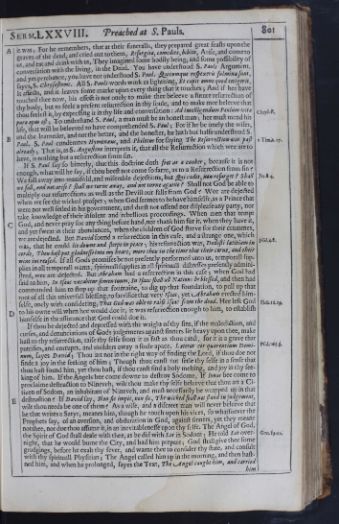 Serm. LXXVIII.
Preached at S. Pauls.
801
it was; For he remembers, that at their funeralls, they prepared great feasts upon the
Serm. LXXVIII.
Preached at S. Pauls.
801
it was; For he remembers, that at their funeralls, they prepared great feasts upon the
graves of the dead, and cried out to them, Resurgite, comedite, bibite, Arise, and come to
us, and eat and drink with us, They imagined some bodily being, and some possibility of
conversation with the living, in the Dead. You have understood S. Pauls Argument,
and yet perchance, you have not understood S. Paul. Quocumque respexeris fulmina sunt,
sayes, S. Chrysostome. All S. Pauls words work as lightning, Et capit omne quod tetigerit,
It affects, and it leaves some marke upon every thing that it touches; And if hee have
touched thee now, his effect is not onely to make thee beleeve a future resurrection of
thy body, but to feele a present resurrection in thy soule, and to make mee beleeve that
thou feelest it, by expressing it in thy life and conversation: Chrysost. Ad intelligendum Paulum vita
pura opus est; To understand S. Paul, a man must be an honest man; hee must mend his
life, that will be beleeved to have comprehended S. Paul; For if he be onely the wiser,
and the learneder, and not the better, and the honester, he hath but halfe understood S.
Paul. S. Paul condemnes Hymenæus, 2 Tim. 2.17. and Philetus for saying The Resurrection was past
already; That is, as S. Augustine interprets it, that all the Resurrection which wee are to
have, is nothing but a resurrection from sin.
If S. Paul say so bitterly, that this doctrine doth fret as a canker, because it is not
enough, what will he say, if thou beest not come so farre, as to a Resurrection from sin?
We fall away into manifold, and miserable dejections, but Qui cadit, non resurget?Jer. 8.4. Shall
we fall, and not arise? shall we turne away, and not turne againe? Shall not God be able to
multiply our resurrections as well as the Devill our falls from God? Wee are dejected
when we see the wicked prosper; when God seemes to behave himselfe, as a Prince that
were not well setled in his government, and durst not offend nor displease any party, nor
take knowledge of their insolent and rebellious proceedings. When men that tempt
God, and never pray for any thing before hand, nor thank him for it, when they have it,
and yet sweat in their abundances, when the children of God starve for their crummes,
we are dejected. But David found a resurrection in this cafe, and a strange one, which
was, that he could lie downe and sleepe in peace; his resurrection was, Psal. 4.8. Dedisti lætitiam in
corde, Thou hast put gladnesse into my heart, more then in the time that their corne, and their
wine increased. If all Gods promifes be not presently performed unto us, temporall sup-
plies in all temporall wants, spirituall supplies in all spirituall distresses presently admini-
stred, wee are dejected. But Abraham had a resurrection in this case; when God had
said to him, In Isaac vocabitur semen tuum, In Isaac shall all Nations be blessed, and then had
commanded him to stop up that fountaine, to dig up that foundation, to pull up that
root of all this universall blessing, to sacrifice that very Isaac, yet Abraham erected him-
selfe, Heb. 11.19. onely with considering, That God was able to raise Isaac from the dead. Hee left God
to his owne will when hee would doe it, it was resurrection enough to him, to establish
himselfe in the assurance that God could doe it.
If thou be dejected and depressed with the waight of thy sins, if the malediction, and
curses, and denunciations of Gods judgements against sinners lie heavy upon thee, make
hasthaste to thy resurrection, raise thy selfe from it as fast as thou canst, for it is a grave that
putrifies, and corrupts, and molders away a soule apace. Psal. 105.3. Lætetur cor quærentium Domi-
num, sayes David; Thou art not in the right way of finding the Lord, if thou doe not
finde a joy in the seeking of him; Though thou canst not setle thy selfe in a sense that
thou hast found him, yet thou hast, if thou canst find a holy melting, and joy in thy see-
king of him. If the Angels bee come downe to destroy Sodome, If Ionas bee come to
proclaime destruction to Nineveh, wilt thou make thy selfe beleeve that thou art a Ci-
tizen of Sodom, an inhabitant of Nineveh, and must necessarily be wrapped up in that
destruction? If David say, Non sic impii, non sic, The wicked shall not stand in judgement,
wilt thou needs be one of them? As a wise, and a discreet man will never beleeve that
he that writes a Satyr, meanes him, though he touch upon his vices, so whatsoever the
Prophets say, of an aversion, and obduration in God, against sinners, yet they meane
not thee, nor doe thou assume it, in an inevitablenesse upon thy selfe. The Angel of God,
the Spirit of God shall deale with thee, as he did with Lot in Sodom; He told Lot Gen. 19.12. over-
night, that he would burne the City, and bad him prepare; God shall give thee some
grudgings, before he exalt thy fever, and warne thee to consider thy state, and consult
with thy spirituall Physitian; The Angel called him up in the morning, and then hast-
ned him, and when he prolonged, sayes the Text, The Angel caught him, and carried him
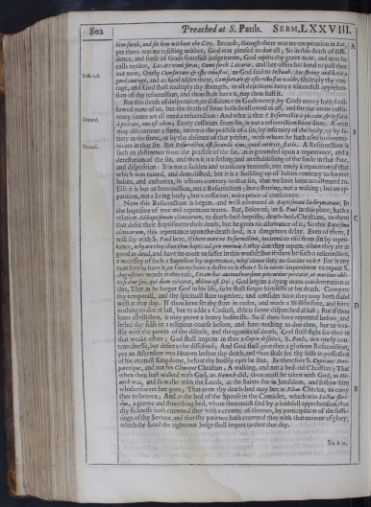 802
Preached at S. Pauls.
Serm. LXXVIII.
him forth, and set him without the City. Because, though there was no cooperation in Lot,
802
Preached at S. Pauls.
Serm. LXXVIII.
him forth, and set him without the City. Because, though there was no cooperation in Lot,
yet there was no resisting neither, God was pleased to doe all; So in this death of diffi-
dence, and sense of Gods fearefull judgements, God opens thy grave now, and now he
calls to thee, Lazare veni foras, Come forth Lazarus, and hee offers his hand to pull thee
out now, Iosh. 1.6. Onely Comfortare & esto robustus, as God said to Ioshuah, Bee strong and have a
good courage, and as God addes there, Comfortare & esto robustus valde, Multiply thy cou-
rage, and God shall multiply thy strength, in all dejections have a cheerefull apprehen-
sion of thy resurrection, and thou shalt have it, nay thou hast it.
But this death of desperation, or diffidence in Gods mercy, by Gods mercy hath swal-
lowed none of us, but the death of sinne hath swallowed us all, and for our owne custo-
mary sinnes we all need a resurrection: And what is that? Resurrectio à peccato, & cessatioDurand.
à peccato, non est idem; Every cessation from sin, is not a resurrection from sinne. A man
may discontinue a sinne, intermit the practise of a sin, by infirmity of the body, or by sa-
tiety in the sinne, or by the absence of that person, with whom he hath used to commu-
nicate in that sin.Damasc. But Resurrectio, est secunda ejus, quod interiit, statio. A Resurrection is
such an abstinence from the practise of the sin, as is grounded upon a repentance, and a
detestation of the sin, and then it is a setling, and an establishing of the soule in that state,
and disposition: It is not a sudden and transitory remorse, nor onely a reparation of that
which was ruined, and demolished, but it is a building up of habits contrary to former
habits, and customes, in actions contrary to that sin, that we have been accustomed to.
Else it is but an Intermission, not a Resurrection; but a starting, not a waking; but an ap-
parition, not a living body; but a cessation, not a peace of conscience.
Now this Resurrection is begun, and well advanced in Baptismate lachrymarum, In
the baptisme of true and repentant teares. But, Beloved, as S. Paul in this place, hath a
relation Ad baptismum clinicorum, to death-bed-baptists, death-bed-Christians, to them
that defer their Baptisme to their death, but he gives no allowance of it; So this Baptisma
clinicorum, this repentance upon the death-bed, is a dangerous delay. Even of them, I
will say with S. Paul here, If there were no Resurrection, no need to rise from sin by repen-
tance, why are they then thus baptized, pro mortuis? why doe they repent, when they are as
good as dead, and have no more to suffer in this world? But if there be such a resurrection,
a necessity of such a Baptisme by repentance, why come they no sooner to it? For is any
man sure to have it, or sure to have a desire to it then? It is never impertinent to repeat S.
Augustines words in this case, Etiam hac animadversione percutitur peccator, ut moriens obli-
viscatur sui, qui dum viveret, oblitus est Dei; God begins a dying mans condemnation at
this, That as he forgot God in his life, so he shall forget himselfe at his death. Compare
thy temporall, and thy spirituall state together, and consider how they may both stand
well at that day. If thou have set thy state in order, and made a Will before, and have
nothing to doe at last, but to adde a Codicil, this is soone dispatched at last; But if thou
leave all till then, it may prove a heavy businesse. So if thou have repented before, and
setled thy selfe in a religious course before, and have nothing to doe then, but to wra-
stle with the power of the disease, and the agonies of death, God shall fight for thee in
that weake estate; God shall imprint in thee a Cupio dissolvi, S. Pauls, not onely con-
tentednesse, but desire to be dissolved; And God shall give thee a glorious Resurrection,
yea an Ascension into Heaven before thy death, and thou shalt see thy selfe in possession
of his eternall Kingdome, before thy bodily eyes be shut. Be therefore S. Cyprians Peri-
patetique, and not his Clinique Christian; A walking, and not a bed-rid Christian; That
when thou hast walked with God, as Henoch did, thou maist be taken with God, as He-
noch was, and so walke with the Lamb, as the Saints doe in Jerusalem, and follow him
whithersoever hee goes; That even thy death-bed may bee as Elias Chariot, to carry
thee to heaven; And as the bed of the Spouse in the Canticles, which was Lectus flori-
dus, a greene and flourishing bed, where thou maist find by a faithfull apprehension, that
thy sicknesse hath crowned thee with a crowne of thornes, by participation of the suffe-
rings of thy Saviour, and that thy patience hath crowned thee with that crowne of glory,
which the Lord the righteous Judge shall impart to thee that day. Serm.
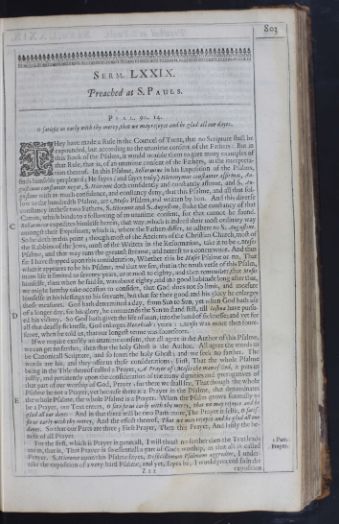 803
803
Serm. LXXIX.
Preached at S. Pauls.
Psal. 90.14.
O satisfie us early with thy mercy, that we may rejoyce and be glad all our dayes.
THeyThey have made a Rule in the Councel of Trent, that no Scripture shall be
expounded, but according to the unanime consent of the Fathers: But in
this Book of the Psalms, it would trouble them to give many examples of
that Rule, that is, of an unanime consent of the Fathers, in the interpreta-
tion thereof. In this Psalme, Bellarmine in his Exposition of the Psalms,
finds himselfe perplexed; He sayes (and sayes truly) Hieronymus constanter affirmat, Au-
gustinus constanter negat, S. Hierome doth confidently and constantly affirme, and S. Au-
gustine with as much confidence, and constancy deny, that this Psalme, and all that fol-
low to the hundredth Psalme, are Moses Psalms, and written by him. And this diverse
constancy in these two Fathers, S. Hierome and S. Augustine, shake the constancy of that
Canon, which binds to a following of an unanime consent, for that cannot be found.
Bellarmine expedites himselfe herein, that way, which is indeed their most ordinary way
amongst their Expositors, which is, where the Fathers differ, to adhere to S. Augustine.
So he doth in this point; though most of the Ancients of the Christian Church, most of
the Rabbins of the Jews, most of the Writers in the Reformation, take it to be Moses
Psalme, and that way runs the greatest streame, and nearest to a concurrence. And thus
far I have stopped upon this consideration, Whether this be Moses Psalme or no, That
when it appeares to be his Psalme, and that we see, that in the tenth verse of this Psalm,
mans life is limited to seventy years, or at most to eighty, and then remember, that Moses
himselfe, then when he said so, was above eighty, and in a good habitude long after that,
we might hereby take occasion to consider, that God does not so limit, and measure
himselfe in his blessings to his servants, but that for their good and his glory he enlarges
those measures. God hath determined a day, from Sun to Sun, yet when God hath use
of a longer day, for his glory, he commands the Sun to stand still, till Ioshua have pursu-
ed his victory. So God hath given the life of man, into the hand of sicknesse; and yet for
all that deadly sicknesse, God enlarges Hezekiah's years: Moses was more then foure-
score, when he told us, that our longest terme was fourescore.
If we require exactly an unanime consent, that all agree in the Author of this Psalme,
we can get no farther, then that the holy Ghost is the Author. All agree the words to
be Canonicall Scripture, and so from the holy Ghost; and we seek no farther. The
words are his, and they offer us these considerations; First, That the whole Psalme
being in the Title thereof called a Prayer, A Prayer of Moses the man of God, it puts us
justly, and pertinently upon the consideration of the many dignities and prerogatives of
that part of our worship of God, Prayer; for there we shall see, That though the whole
Psalme be not a Prayer, yet because there is a Prayer in the Psalme, that denominates
the whole Psalme, the whole Psalme is a Prayer. When the Psalm grows formally to
be a Prayer, our Text enters, O satisfie us early with thy mercy, that we may rejoyce and be
glad all our dayes: And in that there will be two Parts more, The Prayer it selfe, O satis-
fie us early with thy mercy, And the effect thereof, That we may rejoyce and be glad all our
dayes. So that our Parts are three; First Prayer, Then this Prayer, And lastly the be-
nefit of all Prayer.
For the first, which is Prayer in generall, 1 Part.
Prayer. I will thrust no farther then the Text leads
me in, that is, That Prayer is so essentiall a part of Gods worship, as that all is called
Prayer. S. Hierome upon this Psalme sayes, Difficillimum Psalmum aggredior, I under-
take the exposition of a very hard Psalme, and yet, sayes he, I would proceed so in the Zzz exposition
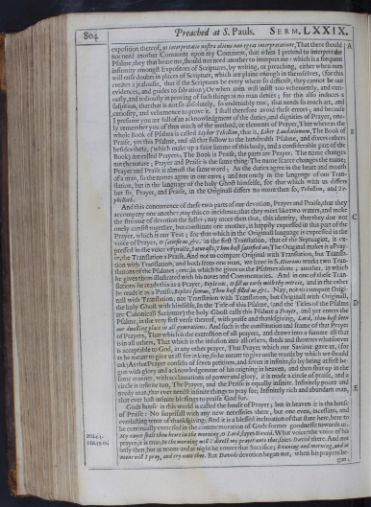 804
Preached at S. Pauls.
Serm. LXXIX.
exposition thereof, ut interpretatio nostra aliena non egeat interpretatione, That there should
804
Preached at S. Pauls.
Serm. LXXIX.
exposition thereof, ut interpretatio nostra aliena non egeat interpretatione, That there should
not need another Comment upon my Comment, that when I pretend to interpret the
Psalme, they that heare me, should not need another to interpret me: which is a frequent
infirmity amongst Expositors of Scriptures, by writing, or preaching, either when men
will raise doubts in places of Scripture, which are plaine enough in themselves, (for this
creates a jealousie, that if the Scriptures be every where so difficult, they cannot be our
evidences, and guides to salvation) Or when men will insist too vehemently, and curi-
ously, and tediously in proving of such things as no man denies; for this also induces a
suspition, that that is not so absolutely, so undeniably true, that needs so much art, and
curiosity, and vehemence to prove it. I shall therefore avoid these errors; and because
I presume you are full of an acknowledgment of the duties, and dignities of Prayer, one-
ly remember you of thus much of the method, or elements of Prayer, That whereas the
whole Book of Psalms is called Sepher Tehillim, that is, Liber Laudationum, The Book of
Praise, yet this Psalme, and all that follow to the hundredth Psalme, and divers others
besides these, (which make up a faire limme of this body, and a considerable part of the
Book) are called Prayers; The Book is Praise, the parts are Prayer. The name changes
not the nature; Prayer and Praise is the same thing: The name scarce changes the name;
Prayer and Praise is almost the same word; As the duties agree in the heart and mouth
of a man, so the names agree in our eares; and not onely in the language of our Tran-
slation, but in the language of the holy Ghost himselfe, for that which with us differs
but so, Prayer, and Praise, in the Originall differs no more then so, Tehillim, and Te-
philloth.
And this concurrence of these two parts of our devotion, Prayer and Praise, that they
accompany one another, nay this co-incidence, that they meet like two waters, and make
the streame of devotion the fuller; nay more then that, this identity, that they doe not
onely consist together, but constitute one another, is happily expressed in this part of the
Prayer, which is our Text; for that which in the Originall language is expressed in the
voice of Prayer, O satisfie us, &c. in the first Translation, that of the Septuagint, is ex-
pressed in the voice of praise, Saturasti, Thou hast satisfied us; The Original makes it a Pray-
er, the Translation a Praise. And not to compare Original with Translation, but Transla-
tion with Translation, and both from one man, we have in S. Hieroms works two Tran-
slations of the Psalmes; one, in which he gives us the Psalmes alone; another, in which
he gives them illustrated with his notes and Commentaries. And in one of these Tran-
slations he reads this as a Prayer, Reple nos, O fill us early with thy mercie, and in the other
he reads it as a Praise, Repleti sumus, Thou hast filled us, &c. Nay, not to compare Origi-
nall with Translation, nor Translation with Translation, but Originall with Originall,
the holy Ghost with himselfe, In the Title of this Psalme, (and the Titles of the Psalms
are Canonicall Scripture) the holy Ghost calls this Psalme a Prayer, and yet enters the
Psalme, in the very first verse thereof, with praise and thanksgiving, Lord, thou hast been
our dwelling place in all generations. And such is the constitution and frame of that Prayer
of Prayers, That which is the extraction of all prayers, and draws into a summe all that
is in all others, That which is the infusion into all others, sheds and showres whatsoever
is acceptable to God, in any other prayer, That Prayer which our Saviour gave us, (for
as he meant to give us all for asking, so he meant to give us the words by which we should
ask) As that Prayer consists of seven petitions, and seven is infinite, so by being at first be-
gun with glory and acknowledgement of his raigning in heaven, and then shut up in the
same manner, with acclamations of power and glory, it is made a circle of praise, and a
circle is infinite too, The Prayer, and the Praise is equally infinite. Infinitely poore and
needy man, that ever needst infinite things to pray for; Infinitely rich and abundant man,
that ever hast infinite blessings to praise God for.
Gods house in this world is called the house of Prayer; but in heaven it is the house
of Praise: No surprisall with any new necessities there, but one even, incessant, and
everlasting tenor of thanksgiving; And it is a blessed inchoation of that state here, here to
be continually exercised in the commemoration of Gods former goodnesse towards us.
My voyce shalt thou heare in the morning,Psal. 5.3. O Lord, sayes David. What voice? the voice of his
prayer; Psal. 55.17. it is true; In the morning will I direct my prayer unto thee, saies David there. And not
only then, but at noone and at night he vowes that Sacrifice; Evening and morning, and at
noone will I pray, and cry unto thee. But Davids devotion began not, when his prayers be-
gan;
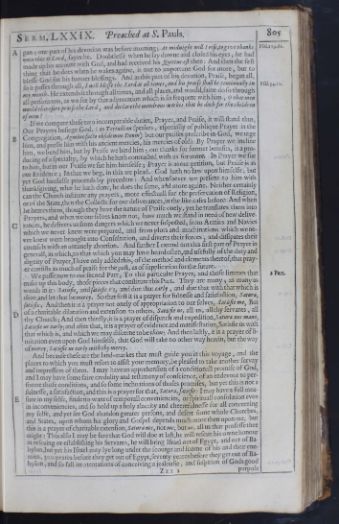 Serm. LXXIX.
Preached at S. Pauls.
805
gan; one part of his devotion was before morning;Psal. 119.62. At midnight will I rise, to give thanks
Serm. LXXIX.
Preached at S. Pauls.
805
gan; one part of his devotion was before morning;Psal. 119.62. At midnight will I rise, to give thanks
unto thee O Lord, sayes he. Doubtlesse when he lay downe and closed his eyes, he had
made up his account with God, and had received his Quietus est then: And then the first
thing that he does when he wakes againe, is not to importune God for more, but to
blesse God for his former blessings. And as this part of his devotion, Praise, began all,
so it passes through all, I will blesse the Lord at all times,Psal. 34.11. and his praise shall be continually in
my mouth. He extends it through all times, and all places, and would faine do so through
all persons too, as we see by that adprecation which is so frequent with him, O that men
would therefore praise the Lord, and declare the wondrous workes that he doth for the children
of men!
If we compare these two incomparable duties, Prayer, and Praise, it will stand thus,
Our Prayers besiege God, (as Tertullian speakes, especially of publique Prayer in the
Congregation, Agmine facto obsidemus Deum) but our praises prescribe in God, we urge
him, and presse him with his ancient mercies, his mercies of old: By Prayer we incline
him, we bend him, but by Praise we bind him; our thanks for former benefits, is a pro-
ducing of a specialty, by which he hath contracted with us for more. In Prayer we sue
to him, but in our Praise we sue him himselfe; Prayer is as our petition, but Praise is as
our Evidence; In that we beg, in this we plead. God hath no law upon himselfe, but
yet God himselfe proceeds by precedent: And whensoever we present to him with
thanksgiving, what he hath done, he does the same, and more againe. Neither certainly
can the Church institute any prayers, more effectuall for the preservation of Religion,
or of the State, then the Collects for our deliverances, in the like cases before: And when
he heares them, though they have the nature of Praise onely, yet he translates them into
Prayers, and when we our selves know not, how much we stand in need of new delive-
rances, he delivers us from dangers which we never suspected, from Armies and Navies
which we never knew were prepared, and from plots and machinations which we ne-
ver knew were brought into Consultation, and diverts their forces, and dissipates their
counsels with an untimely abortion. And farther I extend not this first part of Prayer in
generall, in which, to that which you may have heard often, and usefully of the duty and
dignity of Prayer, I have only added this, of the method and elements thereof, that pray-
er consists as much of praise for the past, as of supplication for the future.
We passe now to our second Part, To this particular Prayer, 2 Part. and those limmes that
make up this body, those pieces that constitute this Part. They are many; as many as
words in it: Satisfie, and satisfie Vs, and doe that early, and doe that with that which is
thine, and let that be mercy. So that first it is a prayer for fulnesse and satisfaction, Satura,
satisfie; And then it is a prayer not onely of appropriation to our selves, Satisfie me, But
of a charitable dilatation and extension to others, Satisfie us, all us, all thy servants, all
thy Church; And then thirdly, it is a prayer of dispatch and expedition, Satura nos mane,
Satisfie us early; and after that, it is a prayer of evidence and manifestation, Satisfie us with
that which is, and which we may discerne to be thine; And then lastly, it is a prayer of li-
mitation even upon God himselfe, that God will take no other way herein, but the way
of mercy, Satisfie us early with thy mercy.
And because these are the land-markes that must guide you in this voyage, and the
places to which you must resort to assist your memory, be pleased to take another survay
and impression of them. I may have an apprehension of a conditionall promise of God,
and I may have some faire credulity and testimony of conscience, of an endeavour to per-
forme those conditions, and so some inchoations of thoses promises, but yet this is not a
fulnesse, a satisfaction, and this is a prayer for that, Satura, satisfie: I may have a full mea-
sure in my selfe, finde no want of temporall conveniencies, or spirituall consolation even
in inconveniencies, and so hold up a holy alacrity and cheerefulnesse for all concerning
my selfe, and yet see God abandon greater persons, and desert some whole Churches,
and States, upon whom his glory and Gospel depends much more then upon me, but
this is a prayer of charitable extension, Satura nos, not me, but us, all us that professe thee
aright: This also I may be sure that God will doe at last, he will rescue his owne honour
in rescuing or establishing his Servants, he will bring Israel out of Egypt, and out of Ba-
bylon, but yet his Israel may lye long under the scourge and scorne of his and their ene-
mies, 300. yeares before they get out of Egypt, seventy yeares before they get out of Ba-
bylon, and so fall into tentations of conceiving a jealousie, and suspition of Gods good Zzz2 purpose
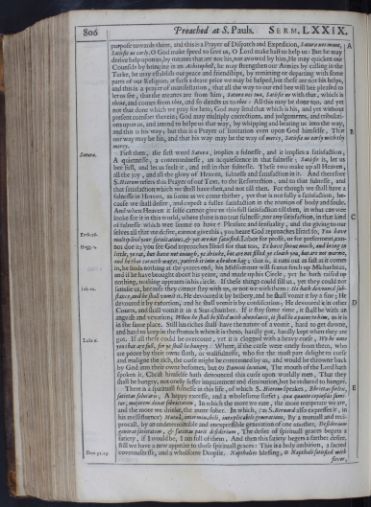 806
Preached at S. Pauls.
Serm. LXXIX.
purpose towards them, and this is a Prayer of Dispatch and Expedition, Satura nos mane,
806
Preached at S. Pauls.
Serm. LXXIX.
purpose towards them, and this is a Prayer of Dispatch and Expedition, Satura nos mane,
Satisfie us early, O God make speed to save us, O Lord make hast to help us: But he may
derive help upon us, by meanes that are not his, not avowed by him, He may quicken our
Counsels by bringing in an Achitophell, he may strengthen our Armies by calling in the
Turke, he may establish our peace and friendships, by remitting or departing with some
parts of our Religion; at such a deare price we may be helped, but these are not his helps,
and this is a prayer of manifestation, that all the way to our end hee will bee pleased to
let us see, that the meanes are from him, Satura nos tua, Satisfie us with that, which is
thine, and comes from thee, and so directs us to thee: All this may be done too, and yet
not that done which we pray for here; God may send that which is his, and yet without
present comfort therein; God may multiply corrections, and judgements, and tribulati-
ons upon us, and intend to helpe us that way, by whipping and beating us into the way,
and this is his way; but this is a Prayer of limitation even upon God himselfe, That
our way may be his, and that his way may be the way of mercy, Satisfie us early with thy
mercy.
First then, Satura. the first word Satura, implies a fulnesse, and it implies a satisfaction,
A quietnesse, a contentednesse, an acquiescence in that fulnesse; Satisfie is, let us
bee full, and let us feele it, and rest in that fulnesse. These two make up all Heaven,
all the joy, and all the glory of Heaven, fulnesse and satisfaction in it. And therefore
S. Hierom refers this Prayer of our Text, to the Resurrection, and to that fulnesse, and
that satisfaction which we shall have then, and not till then. For though we shall have a
fulnesse in Heaven, as soone as we come thither, yet that is not fully a satisfaction, be-
cause we shall desire, and expect a fuller satisfaction in the reunion of body and soule.
And when Heaven it selfe cannot give us this full satisfaction till then, in what can wee
looke for it in this world, where there is no true fulnesse, nor any satisfaction, in that kind
of fulnesse which wee seeme to have? Pleasure and sensuality, and the giving to our
selves all that we desire, Ezek. 16. cannot give this; you heare God reproaches Israel so, You have
multiplied your fornications, & yet are not satisfied. Labor for profit, or for preferment, can-
not doe it;Hagg. 1. you see God reproaches Israel for that too, Ye have sowne much, and bring in
little, ye eat, but have not enough, ye drinke, but are not filled, ye cloath you, but are not warme,
and he that earneth wages, putteth it into a broken bag; that is, it runs out as fast as it comes
in, he finds nothing at the yeares end, his Midsommer will scarce fetch up Michaelmas,
and if he have brought about his yeare, and made up his Circle, yet he hath raised up
nothing, nothing appeares in his circle. If these things could fill us, yet they could not
satisfie us, Iob 20. because they cannot stay with us, or not we with them: He hath devoured sub-
stance, and he shall vomit it. He devoured it by bribery, and he shall vomit it by a fine; He
devoured it by extortion, and he shall vomit it by confiscation; He devoured it in other
Courts, and shall vomit it in a Star-chamber. If it stay some time, it shall be with an
anguish and vexation; When he shall be filled with abundance, it shall be a paine to him, as it is
in the same place. Still his riches shall have the nature of a vomit, hard to get downe,
and hard to keep in the stomach when it is there; hardly got, hardly kept when they are
got.Luke 6. If all these could be overcome, yet it is clogged with a heavy curse, Wo be unto
you that are full, for ye shall be hungry: Where, if the curse were onely from them, who
are poore by their owne sloth, or wastfulnesse, who for the most part delight to curse
and maligne the rich, the curse might be contemned by us, and would be throwne back
by God into their owne bosomes; but Os Domini locutum, The mouth of the Lord hath
spoken it, Christ himselfe hath denounced this curse upon worldly men, That they
shall be hungry, not onely suffer impairement and diminution, but be reduced to hunger.
There is a spirituall fulnesse in this life, of which S. Hierom speakes, Ebrietas fœlix,
satietas salutaris, A happy excesse, and a wholesome surfet; quæ quanto copiosiùs sumi-
tur, majorem donat sobrietatem, In which the more we eate, the more temperate we are,
and the more we drinke, the more sober. In which, (as S. Bernard also expresses it, in
his mellifluence) Mutuâ, interminabili, inexplicabili generatione, By a mutuall and reci-
procall, by an undeterminable and unexpressible generation of one another, Desiderium
generat satietatem, & satietas parit desiderium, The desire of spirituall graces begets a
satiety, if I would be, I am full of them, And then this satiety begets a farther desire,
still we have a new appetite to those spirituall graces: This is a holy ambition, a sacred
covetousnesse, Deut. 32.23. and a wholsome Dropsie. Napthalies blessing, O Napthali satisfied with favour,
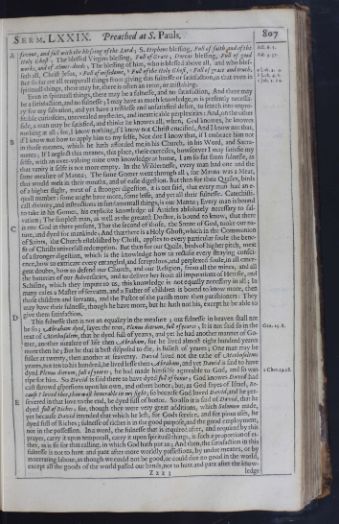 Serm. LXXIX.
Preached at S. Pauls.
807
favour, and full with the blessing of the Lord; S. Stephens blessing, Act. 6.5. Full of faith and of the
Serm. LXXIX.
Preached at S. Pauls.
807
favour, and full with the blessing of the Lord; S. Stephens blessing, Act. 6.5. Full of faith and of the
Holy Ghost; The blessed Virgins blessing, Full of Grace; Dorcas blessing, Act. 9.37. Full of good
works, and of Almes-deeds; The blessing of him, who is blessed above all, and who bles-
seth all, Christ Jesus, a Luk. 2.4. aFull of wisedome, bFull of the Holy Ghost, cFull of grace and truth.
b Luk. 4.1. But so far are all temporall things from giving this fulnesse or satisfaction, as that even in
c Joh. 1.14. spirituall things, there may be, there is often an error, or mistaking.
Even in spirituall things, there may be a fulnesse, and no satisfaction, And there may
be a satisfaction, and no fulnesse; I may have as much knowledge, as is presently necessa-
ry for my salvation, and yet have a restlesse and unsatisfied desire, to search into unpro-
fitable curiosities, unrevealed mysteries, and inextricable perplexities: And, on the other
side, a man may be satisfied, and thinke he knowes all, when, God knowes, he knowes
nothing at all; for, I know nothing, if I know not Christ crucified, And I know not that,
if I know not how to apply him to my selfe, Nor doe I know that, if I embrace him not
in those meanes, which he hath afforded me in his Church, in his Word, and Sacra-
ments; If I neglect this meanes, this place, these exercises, howsoever I may satisfie my
selfe, with an over-valuing mine own knowledge at home, I am so far from fulnesse, as
that vanity it selfe is not more empty. In the Wildernesse, every man had one and the
same measure of Manna; The same Gomer went through all; for Manna was a Meat,
that would melt in their mouths, and of easie digestion. But then for their Quailes, birds
of a higher flight, meat of a stronger digestion, it is not said, that every man had an e-
quall number: some might have more, some lesse, and yet all their fulnesse. Catechisti-
call divinity, and instructions in fundamentall things, is our Manna; Every man is bound
to take in his Gomer, his explicite knowledge of Articles absolutely necessary to sal-
vation; The simplest man, as well as the greatest Doctor, is bound to know, that there
is one God in three persons, That the second of those, the Sonne of God, tooke our na-
ture, and dyed for mankinde; And that there is a Holy Ghost, which in the Communion
of Saints, the Church established by Christ, applies to every particular soule the bene-
fit of Christs universall redemption. But then for our Quails, birds of higher pitch, meat
of a stronger digestion, which is the knowledge how to rectifie every straying consci-
ence, how to extricate every entangled, and scrupulous, and perplexed soule, in all emer-
gent doubts, how to defend our Church, and our Religion, from all the mines, and all
the batteries of our Adversaries, and to deliver her from all imputations of Heresie, and
Schisme, which they impute to us, this knowledge is not equally necessary in all; In
many cases a Master of servants, and a Father of children is bound to know more, then
those children and servants, and the Pastor of the parish more then parishioners: They
may have their fulnesse, though he have more, but he hath not his, except he be able to
give them satisfaction.
This fulnesse then is not an equality in the measure; our fulnesse in heaven shall not
be so; Abraham dyed, sayes the text, Plenus dierum, full of yeares;Gen. 25.8. It is not said so in the
text of Methusalem, that he dyed full of yeares, and yet he had another manner of Go-
mer, another measure of life then Abraham, for he lived almost eight hundred yeares
more then he; But he that is best disposed to die, is fullest of yeares; One man may be
fuller at twenty, then another at seaventy. David lived not the tithe of Methusalems
yeares, not ten to his hundred, he lived lesse then Abraham, and yet David is said to have
dyed Plenus dierum, full of yeares; he had made himselfe agreeable to God, 1 Chro. 29.28. and so was
ripe for him. So David is said there to have dyed full of honor; God knowes David had
cast shrowd aspersions upon his own, and others honor; but, as God sayes of Israel, Be-
cause I loved thee, thou wast honorable in my sight; so because God loved David, and he per-
severed in that love to the end, he dyed full of honor. So also it is said of David, that he
dyed full of Riches; for, though they were very great additions, which Solomon made,
yet because David intended that which he left, for Gods service, and for pious uses, he
dyed full of Riches; fulnesse of riches is in the good purpose, and the good employment,
not in the possession. In a word, the fulnesse that is inquired after, and required by this
prayer, carry it upon temporall, carry it upon spirituall things, is such a proportion of ei-
ther, as is fit for that calling, in which God hath put us; And then, the satisfaction in this
fulnesse is not to hunt and pant after more worldly possessions, by undue meanes, or by
macerating labour, as though we could not be good, or could doe no good in the world,
except all the goods of the world passed our hands, nor to hunt and pant after the know-
Zzz3 ledge
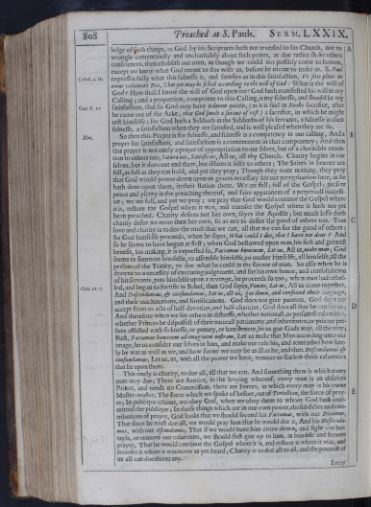 808
Preached at S. Pauls.
Serm. LXXIX.
ledge of such things, as God by his Scriptures hath not revealed to his Church, nor to
808
Preached at S. Pauls.
Serm. LXXIX.
ledge of such things, as God by his Scriptures hath not revealed to his Church, nor to
wrangle contentiously and uncharitably about such points, as doe rather shake others
consciences, then establish our own, as though we could not possibly come to heaven,
except we knew what God meant to doe with us, before he meant to make us. S. Paul
expresses fully what this fulnesse is, Colos. 4.12. and satisfies us in this satisfaction, Vt sitis pleni in
omni voluntate Dei, That yee may be filled according to the will of God: What is the will of
God? How shall I know the will of God upon me? God hath manifested his will in my
Calling; and a proportion, competent to this Calling, is my fulnesse, and should be my
satisfaction, Gen. 8.21. that so God may have Odorem quietis, (as it is said in Noahs sacrifice, after
he came out of the Arke, that God smelt a savour of rest) a sacrifice, in which he might
rest himselfe; for God hath a Sabbath in the Sabbaths of his servants, a fulnesse in their
fulnesse, a satisfaction when they are satisfied, and is well pleased when they are so.
So then this Prayer is for fulnesse, Nos. and fulnesse is a competency in our calling, And a
prayer for satisfaction, and satisfaction is a contentment in that competency; And then
this prayer is not onely a prayer of appropriation to our selves, but of a charitable exten-
tion to others too, Satura nos, Satisfie us, All us, all thy Church. Charity begins in our
selves, but it does not end there, but dilates it selfe to others; The Saints in heaven are
full, as full as they can hold, and yet they pray; Though they want nothing, they pray
that God would powre down upon us graces necessary for our peregrination here, as he
hath done upon them, in their station there. We are full; full of the Gospel; present
peace and plenty in the preaching thereof, and faire apparances of a perpetuall successi-
on; we are full, and yet we pray; we pray that God would continue the Gospel where
it is, restore the Gospel where it was, and transfer the Gospel where it hath not yet
been preached. Charity desires not her own, sayes the Apostle; but much lesse doth
charity desire no more then her own, so as not to desire the good of others too. True
love and charity is to doe the most that we can, all that we can for the good of others;
So God himselfe proceeds, when he sayes, What could I doe, that I have not done? And
so he seems to have begun at first; when God bestowed upon man, his first and greatest
benefit, his making, it is expressed so, Faciamus hominem, Let us, All us, make man; God
seems to summon himselfe, to assemble himselfe, to muster himselfe, all himselfe, all the
persons of the Trinity, to doe what he could in the favour of man. So also when he is
drawne to a necessity of executing judgement, and for his own honor, and consolidation
of his servants, puts himselfe upon a revenge, he proceeds so too; when man had rebel-
led, and began to fortifie in Babel, Gen. 11.7. then God sayes, Venite, Let us, All us come together,
And Descendamus, & confundamus, Let us, all us, goe down, and confound their language,
and their machinations, and fortifications. God does not give patterns, God does not
accept from us acts of half-devotion, and half-charities; God does all that he can for us;
And therefore when we see others in distresse, whether nationall, or personall calamities,
whether Princes be dispossest of their naturall patrimony, and inheritance, or private per-
sons afflicted with sicknesse, or penury, or banishment, let us goe Gods way, all the way;
First, Faciamus hominem ad imaginem nostram, Let us make that Man according unto our
image, let us consider our selves in him, and make our case his, and remember how late-
ly he was as well as we, and how soone we may be as ill as he, and then Descendamus &
confundamus, Let us, us, with all the power we have, remove or slacken those calamities
that lie upon them.
This onely is charity, to doe all, all that we can. And something there is which every
man may doe; There are Armies, in the levying whereof, every man is an absolute
Prince, and needs no Commission, there are Forces, in which every man is his owne
Muster-master, The force which we spoke of before, out of Tertullian, the force of pray-
er; In publique actions, we obey God, when we obey them to whom God hath com-
mitted the publique; In those things which are in our own power, the subfidies and con-
tributions of prayer, God looks that we should second his Faciamus, with our Dicamus,
That since he must doe all, we would pray him that he would doe it, And his Descenda-
mus, with our Ascendamus, That if we would have him come down, and fight our bat-
tayls, or remove our calamities, we should first goe up to him, in humble and fervent
prayer, That he would continue the Gospel where it is, and restore it where it was, and
transfer it where it was never as yet heard; Charity is to doe all to all; and the poorest of
us all can doe this to any. I may
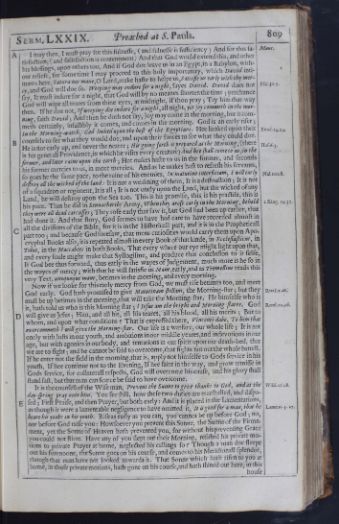 Serm. LXXIX.
Preached at S. Pauls.
809
Serm. LXXIX.
Preached at S. Pauls.
809
I may then, I must pray for this fulnesse, (and fulnesse is sufficiency) And for this Mane. sa-
tisfaction, (and satisfaction is contentment) And that God would extend this, and other
his blessings, upon others too, And if God doe leave us in an Egypt, in a Babylon, with-
out reliefe, for sometime I may proceed to this holy importunity, which David inti-
mates here, Satura nos mane, O Lord, make haste to helpe us, Satisfie us early with thy mer-
cy, and God will doe so. Weeping may endure for a night, sayes David.Psal. 30.5. David does not
say, It must indure for a night, that God will by no meanes shorten the time; perchance
God will wipe all teares from thine eyes, at midnight, if thou pray; Try him that way
then. If he doe not, If weeping doe indure for a night, all night, yet joy commeth in the mor-
ning, faith David; And then he doth not say, Joy may come in the morning, but it com-
meth certainly, infallibly it comes, and comes in the morning. God is an early riser;
In the Marning-watch, God looked upon the host of the Egyptians.Exod. 14.24. Hee looked upon their
counsels to see what they would doe, and upon their forces to see what they could doe.
He is not early up, and never the nearer; His going forth is prepared as the Morning,Hos. 6.3. (there
is his generall Providence, in which he visits every creature) And hee shall come to us, in the
former, and later raine upon the earth; Hee makes haste to us in the former, and seconds
his former mercies to us, in more mercies. And as he makes hast to refresh his servants,
so goes he the same pace, to the ruine of his enemies, In matutino intersiciamPsal. 101.8. I will early
destroy all the wicked of the land: It is not a weakning of them, It is a destruction; It is not
of a squadron or regiment, It is all; It is not onely upon the Land, but the wicked of any
Land, he will destroy upon the Sea too. This is his promise, this is his practise, this is
his pace. Thus he did in Sennacheribs Army, When they arose early in the Morning,2 King. 19.35. behold
they were all dead carcasses; They rose early that saw it, but God had been up earlier, that
had done it. And that story, God seemes to have had care to have recorded almost in
all the divisions of the Bible, for it is in the Historicall part, and it is in the Propheticall
part too; and because God foresaw, that mens curiosities would carry them upon Apo-
cryphal Books also, it is repeated almost in every Book of that kinde, in Ecclesiasticus, in
Tobit, in the Maccabees in both Books, That every where our eye might light upon that,
and every soule might make that Syllogisme, and produce that conclusion to it selfe,
If God bee thus forward, thus early in the wayes of Judgement, much more is he so in
the wayes of mercy; with that he will satisfie us Mane, early, and as Tremellius reads this
very Text, unoquoque mane, betimes in the morning, and every morning.
Now if we looke for this early mercy from God, we must rise betimes too, and meet
God early. God hath promised to give Matutinam stellam, the Morning-star;Revel. 2 282.28. but they
must be up betimes in the morning, that will take the Morning-star. He himselfe who is
it, hath told us who is this Morning star; I Iesus am the bright and Morning starre.Revel. 22.16. God
will give us Jesus; Him, and all his, all his teares, all his blood, all his merits; But to
whom, and upon what conditions? That is expressed there, Vincenti dabe, To him that
overcommeth I will give the Morning-star. Our life is a warfare, our whole life; It is not
onely with lusts in our youth, and ambitions in our middle yeares, and indevotions in our
age, but with agonies in our body, and tentations in our spirit upon our death-bed, that
we are to fight; and he cannot be said to overcome, that fights not out the whole battell.
If he enter not the field in the morning, that is, apply not himselfe to Gods service in his
youth, If hee continue not to the Evening, If hee faint in the way, and grow remisse in
Gods service, for collaterall respects, God will overcome his cause, and his glory shall
stand fast, but that man can scarce be said to have overcome.
It is the counsell of the Wise man, Prevent the Sunne to give thanks to God,Wisd. 16.28. and at the
day-spring pray unto him. You see still, how these two duties are marshalled, and dispo-
sed; First Praise, and then Prayer, but both early: And it is placed in the Lamentations,
as though it were a lamentable negligence to have omitted it, It is good for a man,Lament. 3.27. that he
beare his yoake in his youth. Rise as early as you can, you cannot be up before God; no,
nor before God raise you: Howsoever you prevent this Sunne, the Sunne of the Firma-
ment, yet the Sonne of Heaven hath prevented you, for without his preventing Grace
you could not stirre. Have any of you slept out their Morning, resisted his private mo-
tions to private Prayer at home, neglected his callings so? Though a man doe sleepe
out his forenoone, the Sunne goes on his course, and comes to his Meridionall splendor,
though that man have not looked towards it. That Sonne which hath risen to you at
home, in those private motions, hath gone on his course, and hath shined out here, in this house
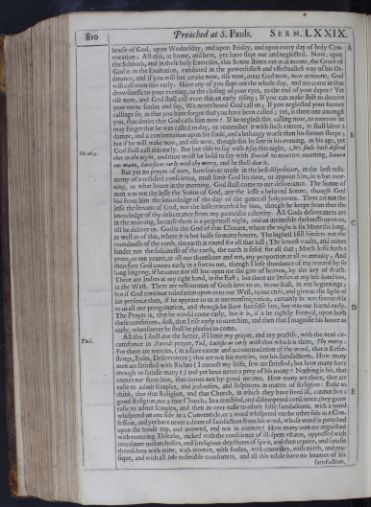 810
Preached at S. Pauls.
Serm. LXXIX.
house of God, upon Wednesday, and upon Friday, and upon every day of holy Con-
810
Preached at S. Pauls.
Serm. LXXIX.
house of God, upon Wednesday, and upon Friday, and upon every day of holy Con-vocation; All this, at home, and here, yee have slept out and neglected. Now, upon
the Sabbath, and in these holy Exercises, this Sonne shines out as at noone, the Grace of
God is in the Exaltation, exhibited in the powerfullest and effectuallest way of his Or-
dinance, and if you will but awake now, rise now, meet God now, now at noone, God
will call even this early. Have any of you slept out the whole day, and are come in that
drowsinesse to your evening, to the closing of your eyes, to the end of your dayes? Yet
rise now, and God shall call even this an early rising; If you can make shift to deceive
your owne soules and say, We never heard God call us; If you neglected your former
callings so, as that you have forgot that you have been called; yet, is there one amongst
you, that denies that God calls him now? If he neglect this calling now, to morrow he
may forget that he was called to day, or remember it with such a terror, as shall blow a
dampe, and a consternation upon his soule, and a lethargy worse then his former sleepe;
but if he will wake now, and rise now, though this be late in his evening, in his age, yet
God shall call this early.Isai. 26.9. Bee but able to say with Esay this night, My soule hath desired
thee in the night, and thou maist be bold to say with David to morrow morning, Satura
nos mane, Satisfie us early with thy mercy, and he shall doe it.
But yet no prayer of ours, howsoever made in the best disposition, in the best testi-
mony of a rectified conscience, must limit God his time, or appoint him, in what mor-
ning, or what houre in the morning, God shall come to our deliverance. The Sonne of
man was not the lesse the Sonne of God, nor the lesse a beloved Sonne, though God
hid from him the knowledge of the day of the generall Judgement. Thou art not the
lesse the servant of God, nor the lesse rewarded by him, though he keepe from thee the
knowledge of thy deliverance from any particular calamity. All Gods deliverances are
in the morning, because there is a perpetuall night, and an invincible darknesse upon us,
till he deliver us. God is the God of that Climate, where the night is six Moneths long,
as well as of this, where it is but halfe so many houres. The highest Hill hinders not the
roundnesse of the earth, the earth is round for all that hill; The lowest vaults, and mines
hinder not the solidnesse of the earth, the earth is solid for all that; Much lesse hath a
yeare, or ten yeares, or all our threescore and ten, any proportion at all to eternity; And
therefore God comes early in a sort to me, though I lose abundance of my reward by so
long lingring, if he come not till hee open me the gate of heaven, by the key of death.
There are Indies at my right hand, in the East; but there are Indies at my left hand too,
in the West. There are testimonies of Gods love to us, in our East, in our beginnings;
but if God continue tribulation upon us to our West, to our ends, and give us the light of
his presence then, if he appeare to us at our transmigration, certainly he was favourable
to us all our peregrination, and though he shew himselfe late, hee was our friend early.
The Prayer is, that he would come early, but it is, if it be rightly formed, upon both
these conditions; first, that I rise early to meet him, and then that I magnifie his houre as
early, whensoever he shall be pleased to come.
All this I shall doe the better, Tuâ. if I limit my prayer, and my practise, with the next cir-
cumstance in Davids prayer, Tuâ, Satisfie us early with that which is thine, Thy mercy:
For there are mercies, (in a faire extent and accommodation of the word, that is Refre-
shings, Eases, Deliverances) that are not his mercies, nor his satisfactions. How many
men are satisfied with Riches (I correct my selfe, few are satisfied; but how many have
enough to satisfie many?) and yet have never a peny of his mony? Nothing is his, that
comes not from him, that comes not by good meanes. How many are there, that are
easie to admit scruples, and jealousies, and suspitions in matter of Religion: Easie to
think, that that Religion, and that Church, in which they have lived ill, cannot bee a
good Religion, nor a true Church; In a troubled, and distempered conscience, they grow
easie to admit scruples, and then as over-easie to admit false satisfactions, with a word
whispered on one side in a Conventicle, or a word whispered on the other side in a Con-
fession, and yet have never a dram of satisfaction from his word, whose word is preached
upon the house top, and avowed, and not in corners? How many men are anguished
with torturing Diseases, racked with the conscience of ill-spent estates, oppressed with
inordinate melancholies, and irreligious dejections of spirit, and then repaire, and satisfie
themselves with wine, with women, with fooles, with comedies, with mirth, and mu-
sique, and with all Iobs miserable comforters, and all this while have no beames of his satisfaction
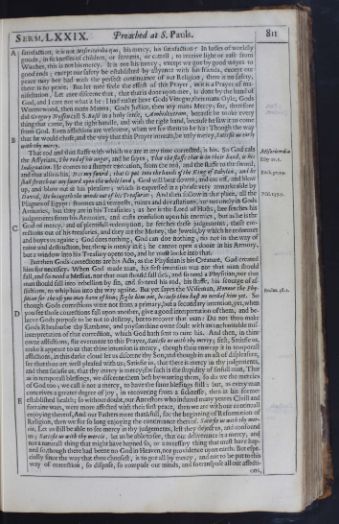 Serm. LXXIX.
Preached at S. Pauls.
811
satisfaction, it is not Misericordia ejus, his mercy, his satisfaction? In losses of worldly
Serm. LXXIX.
Preached at S. Pauls.
811
satisfaction, it is not Misericordia ejus, his mercy, his satisfaction? In losses of worldly
goods, in sicknesses of children, or servants, or cattell, to receive light or ease from
Witches, this is not his mercy. It is not his mercy, except we goe by good wayes to
good ends; except our safety be established by allyance with his friends, except our
peace may bee had with the perfect continuance of our Religion, there is no safety,
there is no peace. But let mee feele the effect of this Prayer, as it is a Prayer of ma-
nifestation, Let mee discerne that, that that is done upon mee, is done by the hand of
God, and I care not what it be: I had rather have Gods Vinegar, then mans Oyle, Gods
Wormewood, then mans Manna, Gods Justice, then any mans Mercy; for, therefore
did Gregory Nyssen call S. Basil in a holy sense, Ambidextrum, because he tooke every
thing that came, by the right handle, and with the right hand, because he saw it to come
from God. Even afflictions are welcome, when we see them to be his: Though the way
that he would chuse, and the way that this Prayer intreats, be only mercy, Satisfie us early
with thy mercy.
That rod and that staffe with which we are at any time corrected, is his.Misericordia So God cals
the Assyrians, The rod of his anger, and Esay 10.5. he sayes, That the staffe that is in their hand, is his
Indignation. He comes to a sharper execution, from the rod, and the staffe to the sword,
and that also is his, It is my sword, that is put into the hands of the King of Babylon,Ezek. 30.24. and he
shall stretch out my sword upon the whole land; God will beat downe, and cut off, and blow
up, and blow out at his pleasure; which is expressed in a phrase very remarkeable by
David, He bringeth the winde out of his Treasuries; And then follow in that place, Psal. 135.7. all the
Plagues of Egypt: stormes and tempests, ruines and devastations, are not onely in Gods
Armories, but they are in his Treasuries; as hee is the Lord of Hosts, hee fetches his
judgements from his Armories, and casts confusion upon his enemies, but as he is the
God of mercy, and of plentifull redemption, he fetches these judgements, these cor-
rections out of his treasuries, and they are the Money, the Jewels, by which he redeemes
and buyes us againe; God does nothing, God can doe nothing, no not in the way of
ruine and destruction, but there is mercy in it; he cannot open a doore in his Armory,
but a window into his Treasury opens too, and he must looke into that.
But then Gods corrections are his Acts, as the Physitian is his Creature, God created
him for necessity. When God made man, his first intention was not that man should
fall, and so need a Messias, nor that man should fall sick, and so need a Physitian, nor that
man should fall into rebellion by sin, and so need his rod, his staffe, his scourge of af-
flictions, to whip him into the way againe. But yet sayes the Wiseman, Ecclus. 38.1. Honour the Phy-
sitian for the use you may have of him; slight him not, because thou hast no need of him yet. So
though Gods corrections were not from a primary, but a secondary intention, yet, when
you see those corrections fall upon another, give a good interpretation of them, and be-
leeve Gods purpose to be not to destroy, but to recover that man: Do not thou make
Gods Rheubarbe thy Ratsbane, and poyson thine owne soule with an uncharitable mis-
interpretation of that correction, which God hath sent to cure his. And then, in thine
owne afflictions, flie evermore to this Prayer, Satisfie us with thy mercy; first, Satisfie us,
make it appeare to us that thine intention is mercy, though thou enwrap it in temporall
afflictions, in this darke cloud let us discerne thy Son, and though in an act of displeasure,
see that thou art well pleased with us; Satisfie us, that there is mercy in thy judgements,
and then satisfie us, that thy mercy is mercy; for such is the stupidity of sinfull man, That
as in temporall blessings, we discerne them best by wanting them, so do we the mercies
of God too; we call it not a mercy, to have the same blessings still: but, as every man
conceives a greater degree of joy, in recovering from a sicknesse, then in his former
established health; so without doubt, our Ancestors who indured many yeares Civill and
forraine wars, were more affected with their first peace, then we are with our continuall
enjoying thereof, And our Fathers more thankfull, for the beginning of Reformation of
Religion, then we for so long enjoying the continuance thereof. Satisfie us with thy mer-
cie, Let us still be able to see mercy in thy judgements, lest they deject us, and confound
us; Satisfie us with thy mercie, let us be able to see, that our deliverance is a mercy, and
not a naturall thing that might have hapned so, or a necessary thing that must have hap-
ned so, though there had beene no God in Heaven, nor providence upon earth. But espe-
cially since the way that thou choosest, is to goe all by mercy, and not to be put to this
way of correction, so dispose, so compose our minds, and so transpose all our affecti-
ons,
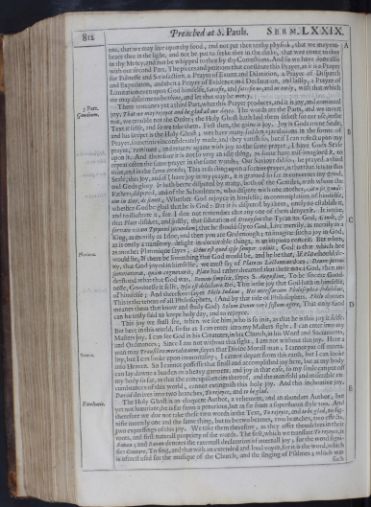 812
Preached at S. Pauls.
Serm. LXXIX.
ons, that we may live upon thy food, and not put thee to thy physick, that we may em-
812
Preached at S. Pauls.
Serm. LXXIX.
ons, that we may live upon thy food, and not put thee to thy physick, that we may em-brace thee in the light, and not be put to seeke thee in the darke, that wee come to thee
in thy Mercy, and not be whipped to thee by thy Corrections. And so we have done also
with our second Part, The pieces and petitions that constitute this Prayer, as it is a Prayer
for Fulnesse and Satisfaction, a Prayer of Extent and Dilatation, a Prayer of Dispatch
and Expedition, and then a Prayer of Evidence and Declaration, and lastly, a Prayer of
Limitation even upon God himselfe, Satisfie, and satisfie us, and us early, with that which
we may discerne to be thine, and let that way be mercy.
There remaines yet a third Part, 3 Part.
Gaudium. what this Prayer produces, and it is joy, and continual
joy, That we may rejoyce and be glad all our dayes. The words are the Parts, and we invert
not, we trouble not the Order; the Holy Ghost hath laid them fitliest for our use, in the
Text it selfe, and so we take them. First then, the gaine is joy. Joy is Gods owne Seale,
and his keeper is the Holy Ghost; wee have many sudden ejaculations in the forme of
Prayer, sometimes inconsiderately made, and they vanish so; but if I can reflect upon my
prayer, ruminate, and returne againe with joy to the same prayer, I have Gods Seale
upon it. And therefore it is not so very an idle thing, as some have mis-imagined it, to
repeat often the same prayer in the same words; Our Saviour did so; he prayed a third
time, and in the same words; This reflecting upon a former prayer, is that that sets to this
Seale, this joy, and if I have joy in my prayer, it is granted so far as concernes my good,
and Gods glory. It hath beene disputed by many, both of the Gentiles, with whom the
Fathers disputed, and of the Schoolemen, who dispute with one another, An sit gaudi-
um in Deo, de semet, Whether God rejoyce in himselfe, in contemplation of himselfe,
whether God be glad that he is God: But it is disputed by them, onely to establish it,
and to illustrate it, for I doe not remember that any one of them denyes it. It is true,
that Plato dislikes, and justly, that salutation of Dionysius the Tyran to God, Gaude, &
servato vitam Tyranni jucundam; that he should say to God, Live merrily, as merrily as a
King, as merrily as I doe, and then you are God enough; to imagine such a joy in God,
as is onely a transitory delight in deceivable things, is an impious conceit. But when,
as another Platonique sayes, Plotinus. Deus est quod ipse semper voluit, God is that which hee
would be, If there be something that God would be, and he be that, If Plato should de-
ny, that God joyed in himselfe, we must say of Plato as Lactantius does, Deum potius
somniaver at, quàm cognoverat, Plato had rather dreamed that there was a God, then un-
derstood what that God was. Bonum simplex, sayes S. Augustine, To be sincere Good-
nesse, Goodnesse it selfe, Ipsa est delectatio Dei, This is the joy that God hath in himselfe,
of himselfe; And therefore sayes Philo Iudæus, Hoc necessarium Philosophiæ sodalibus,
This is the tenent of all Philosophers, (And by that title of Philosophers, Philo alwaies
meanes them that know and study God) Solum Deum verè festum agere, That only God
can be truly said to keepe holy day, and to rejoyce.
This joy we shall see, when we see him, who is so in it, as that he is this joy it selfe.
But here in this world, so far as I can enter into my Masters sight, I can enter into my
Masters joy. I can see God in his Creatures, in his Church, in his Word and Sacraments,
and Ordinances; Since I am not without this sight, I am not without this joy. Here a
man may Transilire mortalitatem, Seneca. sayes that Divine Morall man; I cannot put off morta-
lity, but I can looke upon immortality; I cannot depart from this earth, but I can looke
into Heaven. So I cannot possesse that finall and accomplished joy here, but as my body
can lay downe a burden or a heavy garment, and joy in that ease, so my soule can put off
my body so far, as that the concupiscencies thereof, and the manifold and miserable en-
cumbrances of this world, cannot extinguish this holy joy. And this inchoative joy,
David derives into two branches, To rejoyce, and to be glad.
The Holy Ghost is an eloquent Author, Exultatio. a vehement, and an abundant Author, but
yet not luxuriant; he is far from a penurious, but as far from a superfluous style too. And
therefore we doe not take these two words in the Text, To rejoyce, and to be glad, to sig-
nifie meerely one and the same thing, but to be two beames, two branches, two effects,
two expressings of this joy. We take them therefore, as they offer themselves in their
roots, and first naturall propriety of the words. The first, which we translate To rejoyce, is
Ranan; and Ranan denotes the externall declaration of internall joy; for the word signi-
fies Cantare, To sing, and that with an extended and loud voyce, for it is the word, which
is oftnest used for the musique of the Church, and the singing of Psalmes; which was such
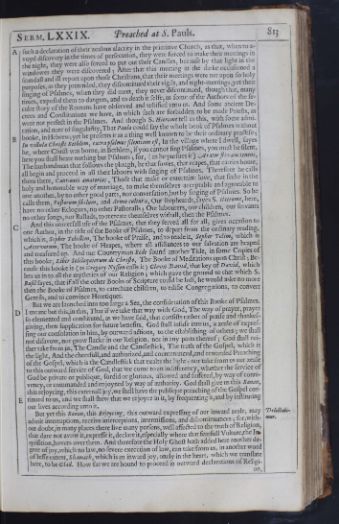 Serm. LXXIX.
Preached at S. Pauls.
813
such a declaration of their zealous alacrity in the primitive Church, as that, when to a-
Serm. LXXIX.
Preached at S. Pauls.
813
such a declaration of their zealous alacrity in the primitive Church, as that, when to a-voyd discovery in the times of persecution, they were forced to make their meetings in
the night, they were also forced to put out their Candles, because by that light in the
windowes they were discovered; After that this meeting in the darke occasioned a
scandall and ill report upon those Christians, that their meetings were not upon so holy
purposes, as they pretended, they discontinued their vigils, and night-meetings, yet their
singing of Psalmes, when they did meet, they never discontinued, though that, many
times, exposed them to dangers, and to death it selfe, as some of the Authors of the se-
cular story of the Romans have observed and testified unto us. And some ancient De-
crees and Constitutions we have, in which such are forbidden to be made Priests, as
were not perfect in the Psalmes. And though S. Hierome tell us this, with some admi-
ration, and note of singularity, That Paula could say the whole book of Psalmes without
booke, in Hebrew; yet he presents it as a thing well known to be their ordinary practise;
In villula Christi Bethlem, extra psalmos silentium est, In the village where I dwell, sayes
he, where Christ was borne, in Bethlem, if you cannot sing Psalmes, you must be silent,
here you shall heare nothing but Psalmes; for, (as he pursues it) Arator stivam tenens,
The husbandman that follows the plough, he that sowes, that reapes, that carries home,
all begin and proceed in all their labours with singing of Psalmes. Therefore he calls
them there, Cantiones amatorias, Those that make or entertaine love, that seeke in the
holy and honorable way of marriage, to make themselves acceptable and agreeable to
one another, by no other good parts, nor conversation, but by singing of Psalmes. So he
calls them, Pastorum sibilum, and Arma culturæ, Our shepheards, sayes S. Hierome, here,
have no other Eclogues, no other Pastoralls; Our labourers, our children, our servants
no other songs, nor Ballads, to recreate themselves withall, then the Psalmes.
And this universall use of the Psalmes, that they served all for all, gives occasion to
one Author, in the title of the Booke of Psalmes, to depart from the ordinary reading,
which is, Sepher Tehillim, The booke of Praise, and to reade it, Sepher Telim, which is
Acervorum, The booke of Heapes, where all assistances to our salvation are heaped
and treasured up. And our Countryman Bede found another Title, in some Copies of
this booke, Liber Soliloquiorum de Christo, The Booke of Meditations upon Christ; Be-
cause this booke is (as Gregory Nyssen calls it) Clavis David, that key of David, which
lets us in to all the mysteries of our Religion; which gave the ground to that which S.
Basil sayes, that if all the other Books of Scripture could be lost, he would aske no more
then the Booke of Psalmes, to catechize children, to edifie Congregations, to convert
Gentils, and to convince Heretiques.
But we are launched into too large a Sea, the consideration of this Booke of Psalmes.
I meane but this, in this, That if we take that way with God, The way of prayer, prayer
so elemented and constituted, as we have said, that consists rather of praise and thankes-
giving, then supplication for future benefits, God shall infuse into us, a zeale of expres-
sing our consolation in him, by outward actions, to the establishing of others; we shall
not disavow, nor grow slacke in our Religion, nor in any parts thereof; God shall nei-
ther take from us, The Candle and the Candlestick, The truth of the Gospel, which is
the light, And the cheerfull, and authorized, and countenanced, and rewarded Preaching
of the Gospel, which is the Candlestick that exalts the light; nor take from us our zeale
to this outward service of God, that we come to an indifferency, whether the service of
God be private or publique, sordid or glorious, allowed and suffered, by way of conni-
vency, or commanded and enjoyned by way of authority. God shall give us this Ranan,
this rejoycing, this externall joy, we shall have the publique preaching of the Gospel con-
tinued to us, and we shall shew that we rejoyce in it, by frequenting it, and by instituting
our lives according unto it.
But yet this Ranan, this Rejoycing, this outward expressing of our inward zeale, Delectabi-
mur. may
admit interruptions, receive interceptions, intermissions, and discontinuances; for, with-
out doubt, in many places there live many persons, well affected to the truth of Religion,
that dare not avow it, expresse it, declare it, especially where that fearfull Vulture, the In-
quisition, hovers over them. And therefore the Holy Ghost hath added here another de-
gree of joy, which no law, no severe execution of law, can take from us, in another word
of lesse extent, Shamach, which is an inward joy, onely in the heart, which we translate
here, to be Glad. How far we are bound to proceed in outward declarations of Religi-
on,
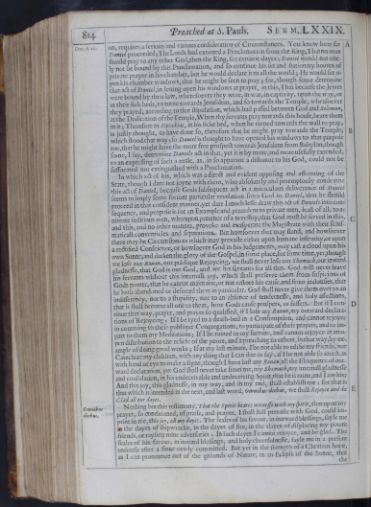 814
Preached at S. Pauls.
Serm. LXXIX.
on, requires a serious and various consideration of Circumstances.Dan. 6.10. You know how far
814
Preached at S. Pauls.
Serm. LXXIX.
on, requires a serious and various consideration of Circumstances.Dan. 6.10. You know how far
Daniel proceeded; The Lords had extorted a Proclamation from the King, That no man
should pray to any other God, then the King, for certaine dayes; Daniel would not one-
ly not be bound by this Proclamation, and so continue his set and stationary houres of
private prayer in his chamber, but he would declare it to all the world; He would set o-
pen his chamber windows, that he might be seen to pray; for, though some determine
that act of Daniel, in setting open his windows at prayer, in this, That because the Jewes
were bound by their law, wheresoever they were, in war, in captivity, upon the way, or
in their sick beds, to turne towards Jerusalem, and so towards the Temple, whensoever
they prayed, according to that stipulation, which had passed between God and Solomon,
at the Dedication of the Temple, When thy servants pray towards this house, heare them
in it; Therefore as Hezekias, in his sicke bed, when he turned towards the wall to pray,
is justly thought, to have done so, therefore that he might pray towards the Temple,
which stood that way; so Daniel is thought to have opened his windows to that purpose
too, that he might have the more free prospect towards Jerusalem from Babylon; though
some, I say, determine Daniels act in that, yet it is by more, and more usefully extended,
to an expressing of such a zeale, as, in so apparant a dishonor to his God, could not be
suffocated nor extinguished with a Proclamation.
In which act of his, which was a direct and evident opposing and affronting of the
State, though I dare not joyne with them, who absolutely and peremptorily condemne
this act of Daniel, because Gods subsequent act in a miraculous deliverance of Daniel
seems to imply some former particular revelation from God to Daniel, that he should
proceed in that confident manner, yet dare I much lesse draw this act of Daniels into con-
sequence, and propose it for an Example and precedent to private men, least of all, to a-
nimate seditious men, who upon pretence of a necessity, that God must be served in this,
and this, and no other manner, provoke and exasperate the Magistrate with their schis-
maticall conventicles and separations. But howsoever that may stand, and howsoever
there may be Circumstances which may prevaile either upon humane infirmity, or upon
a rectified Conscience, or howsoever God in his Judgements, may cast a cloud upon his
own Sunne, and darken the glory of the Gospel, in some place, for some time, yet, though
we lose our Ranan, our publique Rejoycing, we shall never lose our Shamach, our inward
gladnesse, that God is our God, and we his servants for all this. God will never leave
his servants without this internall joy, which shall preserve them from suspicions of
Gods power, that he cannot maintaine, or not restore his cause, and from jealousies, that
he hath abandoned or deserted them in particular. God shall never give them over to an
indifferency, nor to a stupidity, nor to an absence of tendernesse, and holy affections,
that it shall become all one to them, how Gods cause prospers, or suffers. But if I con-
tinue that way, prayer, and prayer so qualified, if I lose my Ranan, my outward declara-
tions of Rejoycing; If I be tyed to a death-bed in a Consumption, and cannot rejoyce
in comming to these publique Congregations, to participate of their prayers, and to im-
part to them my Meditations; If I be ruined in my fortune, and cannot rejoyce in an o-
pen distribution to the reliefe of the poore, and a preaching to others, in that way, by ex-
ample of doing good works; If at my last minute, I be not able to edifie my friends, nor
Catechize my children, with any thing that I can doe or say; if I be not able so much, as
with hand or eye to make a signe, though I have lost my Ranan, all the Eloquence of out-
ward declaration, yet God shall never take from me, my Shamach, my internall gladnesse
and consolation, in his undeceivable and undeceiving Spirit, that he is mine, and I am his;
And this joy, this gladnesse, in my way, and in my end, shall establish me; for that is
that which is intended in the next, and last word, Omnibus diebus, we shall Rejoyce and be
Glad all our dayes.
Nothing but this testimony, Omnibus
diebus. That the Spirit beares witnesse with my spirit, that upon my
prayer, so conditioned, of praise, and prayer, I shall still prevaile with God, could im-
print in me, this joy, all my dayes. The seales of his favour, in outward blessings, fayle me
in the dayes of shipwracke, in the dayes of fire, in the dayes of displacing my potent
friends, or raysing mine adversaries; In such dayes I cannot rejoyce, and be glad. The
seales of his favour, in inward blessings, and holy cheerfulnesse, fayle me in a present
remorse after a sinne newly committed. But yet in the strength of a Christian hope,
as I can pronounce out of the grounds of Nature, in an Eclipse of the Sunne, that the
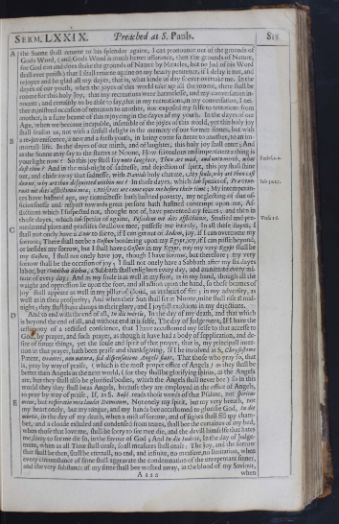 Serm. LXXIX.
Preached at S. Pauls.
815
the Sunne shall returne to his splendor againe, I can pronounce out of the grounds of
Serm. LXXIX.
Preached at S. Pauls.
815
the Sunne shall returne to his splendor againe, I can pronounce out of the grounds of
Gods Word, (and Gods Word is much better assurance, then the grounds of Nature,
for God can and does shake the grounds of Nature by Miracles, but no Jod of his Word
shall ever perish) that I shall returne againe on my hearty penitence, if I delay it not, and
rejoyce and be glad all my dayes, that is, what kinde of day soever overtake me. In the
dayes of our youth, when the joyes of this world take up all the roome, there shall be
roome for this holy Joy, that my recreations were harmelesse, and my conversation in-
nocent; and certainly to be able to say, that in my recreations, in my conversation, I nei-
ther ministred occasion of tentation to another, nor exposed my selfe to tentations from
another, is a faire beame of this rejoycing in the dayes of my youth. In the dayes of our
Age, when we become incapable, insensible of the joyes of this world, yet this holy joy
shall season us, not with a sinfull delight in the memory of our former sinnes, but with
a re-juveniscence, a new and a fresh youth, in being come so neere to another, to an im-
mortall life. In the dayes of our mirth, and of laughter, this holy joy shall enter; And
as the Sunne may say to the starres at Noone, How frivoulous and impertinent a thing is
your light now? So this joy shall say unto laughter, Thou art mad, and unto mirth,Eccles. 2.2. what
dost thou? And in the mid-night of sadnesse, and dejection of spirit, this joy shall shine
out, and chide away that sadnesse, with Davids holy charme, My soule, why art thou cast
downe, why art thou disquieted within me? In those dayes, which Iob speaks of, Iob 30.27. Prævene-
runt me dies afflictionis meæ, Miseries are come upon me before their time; My intemperan-
ces have hastned age, my riotousnesse hath hastned poverty, my neglecting of due of-
ficiousnesse and respect towards great persons hath hastned contempt upon me, Af-
flictions which I suspected not, thought not of, have prevented my feares; and then in
those dayes, which Iob speaks of againe, Possident me dies afflictionis, Verse 16. Studied and pre-
meditated plots and practises swallowe mee, possesse me intirely, In all these dayes, I
shall not onely have a Zoar to flie to, if I can get out of Sodom, joy, if I can overcome my
sorrow; There shall not be a Goshen bordering upon my Egypt, joy, if I can passe beyond,
or besides my sorrow, but I shall have a Goshen in my Egypt, nay my very Egypt shall be
my Goshen, I shall not onely have joy, though I have sorrow, but therefore; my very
sorrow shall be the occasion of joy; I shall not onely have a Sabbath after my six dayes
labor, but Omnibus diebus, a Sabbath shall enlighten every day, and inanimate every mi-
nute of every day: And as my soule is as well in my foot, as in my hand, though all the
waight and oppression lie upon the foot, and all action upon the hand, so these beames of
joy shall appeare as well in my pillar of cloud, as in theirs of fire; in my adversity, as
well as in their prosperity; And when their Sun shall set at Noone, mine shall rise at mid-
night; they shall have damps in their glory, and I joyfull exaltions in my dejections.
And to end with the end of all, In die mortis, In the day of my death, and that which
is beyond the end of all, and without end in it selfe, The day of Judgement, If I have the
testimony of a rectified conscience, that I have accustomed my selfe to that accesse to
God, by prayer, and such prayer, as though it have had a body of supplication, and de-
sire of future things, yet the soule and spirit of that prayer, that is, my principall inten-
tion in that prayer, hath been praise and thanksgiving, If I be involved in S. Chrysostoms
Patent, Orantes, non natura, sed dispensatione Angeli fiunt, That those who pray so, that
is, pray by way of praise, (which is the most proper office of Angels) as they shall be
better then Angels in the next world, (for they shall be glorifying spirits, as the Angels
are, but they shall also be glorified bodies, which the Angels shall never bee) so in this
world they theythey shall be as Angels, because they are employed in the office of Angels,
to pray by way of praise, If, as S. Basil reads those words of that Psalme, not spiritus
meus, but respiratio mea laudet Dominum, Not onely my spirit, but my very breath, not
my heart onely, but my tongue, and my hands bee accustomed to glorifie God, In die
mortis, in the day of my death, when a mist of sorrow, and of sighes shall fill my cham-
ber, and a cloude exhaled and condensed from teares, shall bee the curtaines of my bed,
when those that love me, shall be sorry to see mee die, and the devill himselfe that hates
me, sorry to see me die so, in the favour of God; And In die Iudicii, In the day of Judge-
ment, when as all Time shall cease, so all measures shall cease; The joy, and the sorrow
that shall be then, shall be eternall, no end, and infinite, no measure, no limitation, when
every circumstance of sinne shall aggravate the condemnation of the unrepentant sinner,
and the very substance of my sinne shall bee washed away, in the blood of my Saviour, Aaaa when
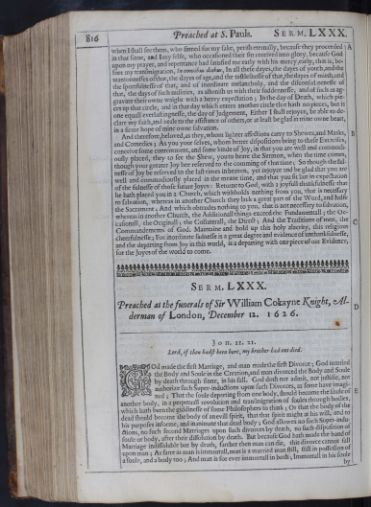 816
Preached at S. Pauls.
Serm. LXXX.
when I shall see them, who sinned for my sake, perish eternally, because they proceeded
816
Preached at S. Pauls.
Serm. LXXX.
when I shall see them, who sinned for my sake, perish eternally, because they proceeded
in that sinne, and I my selfe, who occasioned their sin received into glory, because God
upon my prayer, and repentance had satisfied me early with his mercy, early, that is, be-
fore my transmigration, In omnibus diebus, In all these dayes, the dayes of youth, and the
wantonnesses of that, the dayes of age, and the tastlesnesse of that, the dayes of mirth, and
the sportfulnesse of that, and of inordinate melancholy, and the disconsolatenesse of
that, the days of such miseries, as astonish us with their suddennesse, and of such as ag-
gravate their owne waight with a heavy expectation; In the day of Death, which pie-
ces up that circle, and in that day which enters another circle that hath no pieces, but is
one equall everlastingnesse, the day of Judgement, Either I shall rejoyce, be able to de-
clare my faith, and zeale to the assistance of others, or at least be glad in mine owne heart,
in a firme hope of mine owne salvation.
And therefore, beloved, as they, whom lighter affections carry to Shewes, and Masks,
and Comedies; As you your selves, whom better dispositions bring to these Exercises,
conceive some contentment, and some kinde of Joy, in that you are well and commodi-
ously placed, they to see the Shew, you to heare the Sermon, when the time comes,
though your greater Joy bee reserved to the comming of that time; So though the ful-
nesse of Joy be reserved to the last times in heaven, yet rejoyce and be glad that you are
well and commodiously placed in the meane time, and that you sit but in expectation
of the fulnesse of those future Joyes: Returne to God, with a joyfull thankfulnesse that
he hath placed you in a Church, which withholds nothing from you, that is necessary
to salvation, whereas in another Church they lack a great part of the Word, and halfe
the Sacrament; And which obtrudes nothing to you, that is not necessary to salvation,
whereas in another Church, the Additionall things exceed the Fundamentall; the Oc-
casionall, the Originall; the Collaterall, the Direct; And the Traditions of men, the
Commandements of God. Maintaine and hold up this holy alacrity, this religious
cheerfulnesse; For inordinate sadnesse is a great degree and evidence of unthankfulnesse,
and the departing from Joy in this world, is a departing with one piece of our Evidence,
for the Joyes of the world to come.
Serm. LXXX.
Preached at the funerals of Sir William Cokayne Knight, Al-
derman of London, December 12. 1626.
Joh. 11.21.
Lord, if thou hadst been here, my brother had not died.
GOdGod made the first Marriage, and man made the first Divorce; God married
the Body and Soule in the Creation, and man divorced the Body and Soule
by death through sinne, in his fall. God doth not admit, not justifie, not
authorize such Super-inductions upon such Divorces, as some have imagi-
ned; That the soule departing from one body, should become the soule of
another body, in a perpetuall revolution and transmigration of soules through bodies,
which hath been the giddinesse of some Philosophers to think; Or that the body of the
dead should become the body of an evill spirit, that that spirit might at his will, and to
his purposes informe, and inanimate that dead body; God allowes no such Super-indu-
ctions, no such second Marriages upon such divorces by death, no such disposition of
soule or body, after their dissolution by death. But because God hath made the band of
Marriage indissoluble but by death, farther then man can die, this divorce cannot fall
upon man; As farre as man is immortall, man is a married man still, still in possession of
a soule, and a body too; And man is for ever immortall in both; Immortall in his soule by
 Serm. LXXX.
Preached at S. Pauls.
817
by Preservation, and immortall in his body by Reparation in the Resurrection. For,
Serm. LXXX.
Preached at S. Pauls.
817
by Preservation, and immortall in his body by Reparation in the Resurrection. For,
though they be separated à Thoro & Mensa, from Bed and Board, they are not divorced;
Though the soule be at the Table of the Lambe, in Glory, and the body but at the table of
the Serpent, in dust; Though the soule be in lecto florido, Cant. 1.16. in that bed which is alwayes
green, in an everlasting spring, in Abrahams Bosome; And the body but in that green-
bed, whose covering is but a yard and a halfe of Turfe, and a Rugge of grasse, and the
sheet but a winding sheet, yet they are not divorced; they shall returne to one another
againe, in an inseparable re-union in the Resurrection. To establish this assurance of a
Resurrection in us, God does sometimes in this life, that which he hath promised for the
next; that is, he gives a Resurrection to life, after a bodily death here. God hath made
two Testaments, two Wills; And in both, he hath declared his Power, and his Will,
to give this new life after death, in this world. 1 King. 17. To the Widows sonne of Zarephtha,
he bequeaths new life; and to the Shunamites sonne, he gives the same legacy, 2 King. 4. in the
Old Testament. In the New Testament, to the widow of Naims sonne, Luk. 7.8. he bequeaths
new life; And to Iairus daughter he gives the same legacy: And out of the surplusage
of his inexhaustible estate, out of the overflowing of his Power, he enables his Executors
to doe as he did; for Peter gives Dorcas this Resurrection too.Act. 9.40. Divers examples hath he
given us, of the Resurrection of every particular man, in particular Resurrections; such
as we have named; And one of the generall Resurrection, in the Resurrection of Christ
himselfe; for, in him, we all rose; for, he was All in All; Con-vivificavit, Ephes. 2.5. sayes the A-
postle; and Considere nos fecit, God hath quickned us, (all us; not onely S. Paul, and his
Ephesians, but all) and God hath raised us, and God hath made us to sit together in heavenly
places, in Christ Iesus. They that are not faln yet by any actuall sinne, (children newly
baptized) are risen already in him; And they that are not dead yet, nay, not alive yet,
not yet borne, have a Resurrection in him, who was not onely the Lambe slaine from the
beginning, but from before all beginnings was risen too; and all that shall ever have part
in the second Resurrection, are risen with him from that time. Now, next to that great
Propheticall action, that type of the generall Resurrection, in the Resurrection of Christ,
the most illustrious Evidence, of the Resurrection of particular men, is this Resuscitation
of Lazarus; whose sister Martha, directed by faith, and yet transported by passion, seeks
to entender and mollifie, and supple him to impressions of mercy and compassion, who
was himselfe the Mold, in which all mercy was cast, nay, the substance, of which all
mercy does consist, Christ Jesus, with this imperfect piece of Devotion, which hath a
tincture of Faith, but is deeper dyed in Passion, Lord, if thou hadst been here, my brother
had not dyed.
This Text which you Heare, Martha's single words, Divisio. complicated with this Text
which you See, The dead body of this our Brother, makes up between them this body
of Instruction for the soule; first, That there is nothing in this world perfect; And then,
That such as it is, there is nothing constant, nothing permanent. We consider the first,
That there is nothing perfect, in the best things, in spirituall things; Even Martha's de-
votion and faith hath imperfections in it; And we consider the other, That nothing is
permanent in temporall things; Riches prosperously multiplied, Children honorably
bestowed, Additions of Honor and Titles, fairly acquired, Places of Command and
Government, justly received, and duly executed; All testimonies, all evidences of world-
ly happinesse, have a Dissolution, a Determination in the death of this, and of every such
Man: There is nothing, no spirituall thing, perfect in this world; Nothing, no tempo-
rall thing, permanent and durable; And these two Considerations shall be our two parts;
And then, these the branches from these two roots; First, in the first, we shall see in ge-
nerall, The weaknesse of Mans best actions; And secondly, more particularly, The
weaknesses in Martha's Action; And yet, in a third place, the easinesse, the propensnesse,
the largenesse of Gods goodnesse towards us, in the acceptation of our imperfect Sacri-
fices; for, Christ does not refuse, nor discourage Martha, though her action have these
imperfections; And in this largenesse of his Mercy, which is the end of all, we shall end
this part. And in our second, That as in spirituall things nothing is perfect, so in tempo-
porall things nothing is permanent, we shall, by the same three steps, as in the former,
looke first upon the generall consideration, the fluidnesse, the transitorinesse of all such
temporall things; And then, consider it more particularly, in Gods Master-piece, amongst
mortall things, the body of man, That even that flowes into putrefaction; And then last Aaaa2 ly,
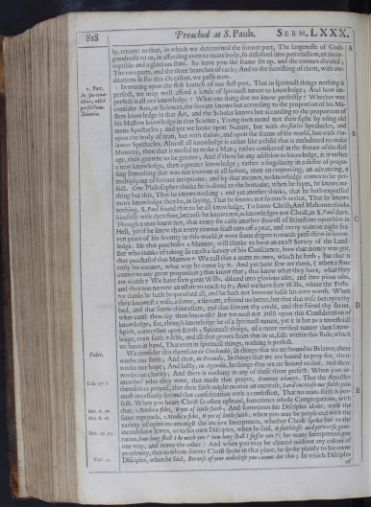 818
Preached at S. Pauls.
Serm. LXXX.
ly, returne to that, in which we determined the former part, The largenesse of Gods
818
Preached at S. Pauls.
Serm. LXXX.
ly, returne to that, in which we determined the former part, The largenesse of Gods
goodnesse to us, in affording even to mans body, so dissolved into putrefaction, an incor-
ruptible and a glorious state. So have you the frame set up, and the roomes divided;
The two parts, and the three branches of each; And to the furnishing of them, with me-
ditations fit for this Occasion, we passe now.
In entring upon the first branch of our first part, 1. Part.
In spiritua-
libus, nihil
perfectum.
Scientia. That in spirituall things nothing is
perfect, we may well afford a kinde of spirituall nature to knowledge; And how im-
perfect is all our knowledge? What one thing doe we know perfectly? Whether wee
consider Arts, or Sciences, the servant knows but according to the proportion of his Ma-
sters knowledge in that Art, and the Scholar knows but according to the proportion of
his Masters knowledge in that Science; Young men mend not their sight by using old
mens Spectacles; and yet we looke upon Nature, but with Aristotles Spectacles, and
upon the body of man, but with Galens, and upon the frame of the world, but with Pto-
lomies Spectacles. Almost all knowledge is rather like a child that is embalmed to make
Mummy, then that is nursed to make a Man; rather conserved in the stature of the first
age, then growne to be greater; And if there be any addition to knowledge, it is rather
a new knowledge, then a greater knowledge; rather a singularity in a desire of propo-
sing something that was not knowne at all before, then an emproving, an advancing, a
multiplying of former inceptions; and by that meanes, no knowledge comes to be per-
fect. One Philosopher thinks he is dived to the bottome, when he sayes, he knows no-
thing but this, That he knows nothing; and yet another thinks, that he hath expressed
more knowledge then he, in saying, That he knows not so much as that, That he knows
nothing. S. Paul found that to be all knowledge, To know Christ; And Mahomet thinks
himselfe wise therefore, because he knows not, acknowledges not Christ, as S. Paul does.
Though a man knew not, that every sin casts another shovell of Brimstone upon him in
Hell, yet if he knew that every riotous feast cuts off a year, and every wanton night sea-
ven years of his seventy in this world, it were some degree towards perfection in know-
ledge. He that purchases a Mannor, will thinke to have an exact Survey of the Land:
But who thinks of taking so exact a survey of his Conscience, how that money was got,
that purchased that Mannor? We call that a mans meanes, which he hath; But that is
truly his meanes, what way he came by it. And yet how few are there, (when a state
comes to any great proportion) that know that; that know what they have, what they
are worth? We have seen great Wills, dilated into glorious uses, and into pious uses,
and then too narrow an estate to reach to it; And we have seen Wills, where the Testa-
tor thinks he hath bequeathed all, and he hath not knowne halfe his own worth. When
thou knowest a wife, a sonne, a servant, a friend no better, but that that wife betrayes thy
bed, and that sonne thine estate, and that servant thy credit, and that friend thy secret,
what canst thou say thou knowest? But we must not insist upon this Consideration of
knowledge; for, though knowledge be of a spirituall nature, yet it is but as a terrestriall
Spirit, conversant upon Earth; Spirituall things, of a more rarified nature then know-
ledge, even faith it selfe, and all that grows from that in us, falls within this Rule, which
we have in hand, That even in spirituall things, nothing is perfect.
We consider this therefore in Credendis, Fides. In things that we are bound to Beleeve, there
works our faith; And then, in Petendis, In things that we are bound to pray for, there
works our hope; And lastly, in Agendis, In things that we are bound to doe, and there
works our charity; And there is nothing in any of these three perfect. When you re-
member who they were, Luk. 17.5. that made that prayer, Domine adauge, That the Apostles
themselves prayed, that their faith might receive an encrease, Lord increase our faith, you
must necessarily second that consideration with a confession, That no mans faith is per-
fect. When you heare Christ so often upbraid, sometimes whole Congregations, with
that, Mat. 6.30. Modicæ fidei, O yee of little faith; And sometimes his Disciples alone, with the
same reproach, Mat. 8.26. Modicæ fidei, O yee of little faith; when you may be perplexed with the
variety of opinions amongst the ancient Interpreters, whether Christ spoke but to the
incredulous Jewes, Mat. 17.17. or to his own Disciples, when he said, O faithlesse and perverse gene-
ration, how long shall I be with you? how long shall I suffer you? (for many Interpreters goe
one way, and many the other) And when you may be cleared without any colour of
perplexity, that to whom soever Christ spoke in that place, he spoke plainly to his owne
Disciples, Vers. 20. when he said, Because of your unbeliefe you cannot doe this; In which Disciples of
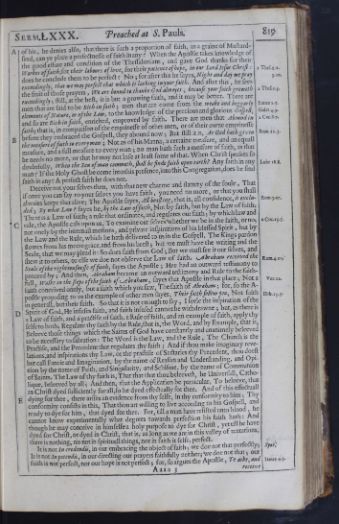 Serm. LXXX.
Preached at S. Pauls.
819
of his, he denies also, that there is such a proportion of faith, as a graine of Mustard-
Serm. LXXX.
Preached at S. Pauls.
819
of his, he denies also, that there is such a proportion of faith, as a graine of Mustard-seed, can ye place a perfectnesse of faith in any? When the Apostle takes knowledge of
the good estate and condition of the Thessalonians, and gave God thanks for their
Workes of faith, for their labours of love, for their patience of hope, in our Lord Iesus Christ:1 Thes. 1.2.
does he conclude them to be perfect? No; 3.10. for after this he sayes, Night and day we pray
exceedingly, that we may perfect that which is lacking in your faith. And after this, he sees
the fruit of those prayers, We are bound to thanke God alwayes, 2 Thes. 1.3. because your faith groweth
exceedingly; still, at the best, it is but a growing faith, and it may be better. There are
men that are said to be Rich in faith;Iames 2.5. men that are come from the weake and beggarly
elements of Nature, or of the Law, to the knowledge Galat. 4.9. of the precious and glorious Gospell,
and so are Rich in faith, enriched, emproved by faith.2 Cor. 8.7. There are men that Abound in
faith; that is, in comparison of the emptinesse of other men, or of their owne emptinesse
before they embraced the Gospell, they abound now; But still it is, Rom. 12.3. As God hath given
the measure of faith to every man; Not as of his Manna, a certaine measure, and an equall
measure, and a full measure to every man; no man hath such a measure of faith, as that
he needs no more, or that he may not lose at least some of that. When Christ speakes so
doubtfully, When the Son of man commeth, shall he finde faith upon earth?Luke 18.8. Any faith in any
man? If the Holy Ghost be come into this presence, into this Congregation, does he find
faith in any? A perfect faith he does not.
Deceive not your selves then, with that new charme and flattery of the soule, That
if once you can say to your selves you have faith, you need no more, or that you shall
alwaies keepe that alive; The Apostle sayes, All boasting, that is, all confidence, Rom. 3.27. is exclu-
ded; By what Law? sayes he, by the Law of faith, Not by faith, but by the Law of faith;
There is a Law of faith; a rule that ordinates, and regulates our faith; by which law and
rule, the Apostle cals upon us, To examine our selves whether we be in the faith, or no;2 Cor. 13.5.
not onely by the internall motions, and private inspirations of his blessed Spirit, but by
the Law and the Rule, which he hath delivered to us in the Gospell. The Kings pardon
flowes from his meere grace, and from his brest; but we must have the writing and the
Seale, that we may plead it: So does faith from God; But we must see it our selves, and
shew it to others, or else we doe not observe the Law of faith.Rom. 4.11. Abraham received the
Seale of the righteousnesse of faith, sayes the Apostle; Hee had an outward testimony to
proceed by; And then, Abraham became an outward testimony and Rule to the faith-
full, Walke in the steps of the faith of Abraham, sayes that Apostle in that place;Ver. 12. Not a
faith conceived onely, but a faith which you saw, The faith of Abraham; for, so the A-
postle proposing to us the example of other men sayes, Their faith follow you, Heb. 13.7. Not faith
in generall, but their faith. So that it is not enough to say, I feele the inspiration of the
Spirit of God, He infuses faith, and faith infused cannot be withdrawne; but, as there is
a Law of faith, and a practise of faith, a Rule of faith, and an example of faith, apply thy
selfe to both; Regulate thy faith by the Rule, that is, the Word, and by Example, that is,
Beleeve those things which the Saints of God have constantly and unanimely beleeved
to be necessary to salvation: The Word is the Law, and the Rule, The Church is the
Practise, and the Precedent that regulates thy faith; And if thou make imaginary reve-
lations, and inspirations thy Law, or the practise of Sectaries thy Precedent, thou doest
but call Fancie and Imagination, by the name of Reason and Understanding, and Opi-
nion by the name of Faith, and Singularity, and Schisme, by the name of Communion
of Saints. The Law of thy faith is, That that that thou beleevest, be Universall, Catho-
lique, beleeved by all; And then, that the Application be particular, To beleeve, that
as Christ dyed sufficiently for all, so he dyed effectually for thee. And of this effectuall
dying for thee, there arises an evidence from thy selfe, in thy conformity to him; Thy
conformity consists in this, That thou art willing to live according to his Gospell, and
ready to dye for him, that dyed for thee. For, till a man have resisted unto blood, he
cannot know experimentally what degrees towards perfection his faith hath: And
though he may conceive in himselfe a holy purpose to dye for Christ, yet till he have
dyed for Christ, or dyed in Christ, that is, as long as we are in this valley of tentations,
there is nothing, no not in spirituall things, not in faith it selfe, perfect.
It is not In credendis, in our embracing the object of faith; we doe not that perfectly;Spes.
It is not In petendis, in our directing our prayers faithfully neither; we doe not that; our
faith is not perfect, nor our hope is not perfect; for, so argues the Apostle, Iames 4.3. Ye aske, and Aaaa3 receive
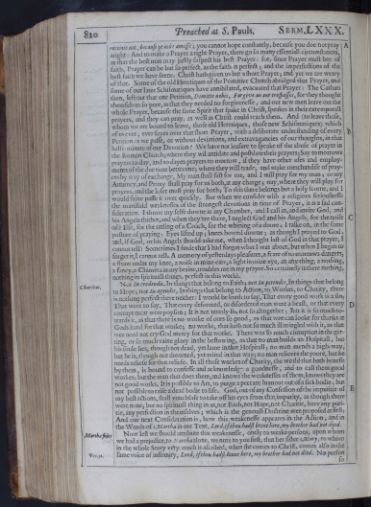 820
Preached at S. Pauls.
Serm. LXXX.
receive not, because ye aske amisse; you cannot hope constantly, because you doe not pray
820
Preached at S. Pauls.
Serm. LXXX.
receive not, because ye aske amisse; you cannot hope constantly, because you doe not pray
aright: And to make a Prayer a right Prayer, there go so many essentiall circumstances,
as that the best man may justly suspect his best Prayer: for, since Prayer must bee of
faith, Prayer can be but so perfect, as the faith is perfect; and the imperfections of the
best faith we have seene. Christ hath given us but a short Prayer; and yet we are weary
of that. Some of the old Heretiques of the Primitive Church abridged that Prayer, and
some of our later Schismatiques have annihilated, evacuated that Prayer: The Cathari
then, left out that one Petition, Dimitte nobis, Forgive us our trespasses, for they thought
themselves so pure, as that they needed no forgivenesse, and our new men leave out the
whole Prayer, because the same Spirit that spake in Christ, speakes in their extemporall
prayers, and they can pray, as well as Christ could teach them. And (to leave those,
whom we are bound to leave, those old Heretiques, those new Schismatiques) which
of us ever, ever sayes over that short Prayer, with a deliberate understanding of every
Petition as we passe, or without deviations, and extravagancies of our thoughts, in that
halfe-minute of our Devotion? We have not leasure to speake of the abuse of prayer in
the Roman Church; where they wil antidate and postdate their prayers; Say to morrows
prayers to day, and to dayes prayers to morrow, if they have other uses and employ-
ments of the due time betweene; where they will trade, and make merchandise of pray-
ers by way of exchange, My man shall fast for me, and I will pray for my man; or my
Atturney, and Proxy shall pray for us both, at my charge; nay, where they will play for
prayers, and the loser must pray for both; To this there belongs but a holy scorne, and I
would faine passe it over quickly. But when we consider with a religious seriousnesse
the manifold weaknesses of the strongest devotions in time of Prayer, it is a sad con-
sideration. I throw my selfe downe in my Chamber, and I call in, and invite God, and
his Angels thither, and when they are there, I neglect God and his Angels, for the noise
of a Flie, for the ratling of a Coach, for the whining of a doore; I talke on, in the same
posture of praying; Eyes lifted up; knees bowed downe; as though I prayed to God;
and, if God, or his Angels should aske me, when I thought last of God in that prayer, I
cannot tell: Sometimes I finde that I had forgot what I was about, but when I began to
forget it, I cannot tell. A memory of yesterdays pleasures, a feare of to morrows dangers,
a straw under my knee, a noise in mine eare, a light in mine eye, an any thing, a nothing,
a fancy, a Chimera in my braine, troubles me in my prayer. So certainely is there nothing,
nothing in spirituall things, perfect in this world.
Not In credendis, Charitas. In things that belong to Faith; not In petendis, In things that belong
to Hope; nor In agendis, In things that belong to Action, to Workes, to Charity, there
is nothing perfect there neither. I would be loath to say, That every good work is a sin;
That were to say, That every deformed, or disordered man were a beast, or that every
corrupt meat were poyson; It is not utterly so; not so altogether; But it is so much to-
wards it, as that there is no worke of ours so good, as that wee can looke for thanks at
Gods hand for that worke; no worke, that hath not so much ill mingled with it, as that
wee need not cry God mercy for that worke. There was so much corruption in the get-
ting, or so much vaine glory in the bestowing, as that no man builds an Hospitall, but
his soule lies, though not dead, yet lame in that Hospitall; no man mends a high-way,
but he is, though not drowned, yet mired in that way; no man relieves the poore, but he
needs reliefe for that reliefe. In all those workes of Charity, the world that hath benefit
by them, is bound to confesse and acknowledge a goodnesse, and to call them good
workes; but the man that does them, and knows the weaknesses of them, knows they are
not good works. It is possible to Art, to purge a peccant humour out of a sick bodie; but
not possible to raise a dead bodie to life. God, out of my Confession of the impuritie of
my best actions, shall vouchsafe to take off his eyes from that impurity, as though there
were none; but no spirituall thing in us, not Faith, not Hope, not Charitie, have any puri-
tie, any perfection in themselves; which is the generall Doctrine wee proposed at first;
And our next Consideration is, how this weakenesse appeares in the Action, and in
the Words of Martha in our Text, Lord, if thou hadst beene here, my brother had not dyed.
Now lest we should attribute this weakenesse, Marthæ fides onely to weake persons, upon whom
we had a prejudice, to Martha alone, we note to you first, that her sister Mary, to whom
in the whole Story very much is ascribed, when she comes to Christ, comes also in the
same voice of infirmity, Ver. 32. Lord, if thou hadst beene here, my brother had not died. No person so
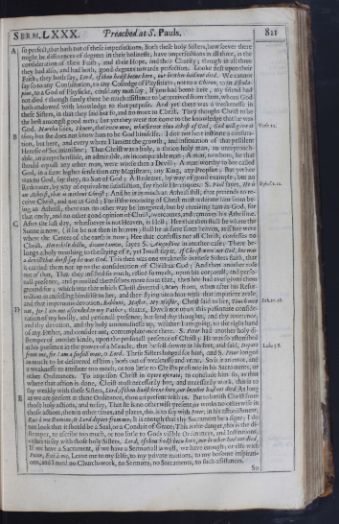 Serm. LXXX.
Preached at S. Pauls.
821
so perfect, that hath not of these imperfections; Both these holy Sisters, howsoever there
Serm. LXXX.
Preached at S. Pauls.
821
so perfect, that hath not of these imperfections; Both these holy Sisters, howsoever there
might be differences of degrees in their holinesse, have imperfections in all three, in the
consideration of their Faith, and their Hone, and their Charity; though in all three
they had also, and had both, good degrees towards perfection. Looke first upon their
Faith; they both say, Lord, if thou hadst beene here, our brother had not died. We cannot
say so to any Consultation, to any Colledge of Physitians; not to a Chiron, to an Escula-
pius, to a God of Physicke, could any man say, If you had beene here, my friend had
not died? though surely there be much assistance to be received from them, whom God
hath endowed with knowledge to that purpose. And yet there was a weakenesse in
these Sisters, in that they said but so, and no more to Christ. They thought Christ to be
the best amongst good men; but yet they were not come to the knowledge that he was
God. Martha saies, I know, that even now, whatsoever thou askest of God, Verse 22. God will give it
thee; but she does not know him to be God himselfe. I doe not here institute a confuta-
tion, but here, and every where I lament the growth, and insinuation of that pestilent
Heresie of Socinianisme; That Christ was a holy, a thrice-holy man, an unreproach-
able, an irreprehensible, an admirable, an incomparable man; A man, to whom, he that
should equall any other man, were worse then a Devill; A man worthy to bee called
God, in a farre higher sense then any Magistrate, any King, any Prophet; But yet hee
was no God, say they, no Son of God; A Redemer, by way of good example; but no
Redeemer, by way of equivalent satisfaction, say those Heretiques. S. Paul sayes, Ephes. 2.12. He is
an Atheist, that is without Christ; And he is as much an Atheist still, that pretends to re-
ceive Christ, and not as God; For if the receiving of Christ must redeeme him from be-
ing an Atheist, there can no other way be imagined, but by receiving him as God, for
that onely, and no other good opinion of Christ, overcomes, and removes his Atheisme.
After the last day, whatsoever is not Heaven, is Hell; Hee that then shall be where the
Sunne is now, (if he be not then in heaven) shall be as farre from heaven, as if hee were
where the Center of the earth is now; Hee that confesses not all Christ, confesses no
Christ. Horribile dictu, dicam tamen, sayes S. Augustine in another case; There be-
longs a holy trembing to the saying of it, yet I must say it, If Christ were not God, hee was
a devill that durst say he was God. This then was one weaknesse in these Sisters faith, that
it carried them not up to the consideration of Christ as God; And then another rose
out of that, That they insisted so much, relied so much, upon his corporall, and perso-
nall presence, and promised themselves more from that, then hee had ever given them
ground for; which was that which Christ diverted Mary from, when after his Resur-
rection manifesting himselfe to her, and shee flying unto him with that impatient zeale,
and that impetuous devotion, Rabboni, Master, My Master, Christ said to her, Ioh. 20.16. Touch mee
not, for I am not ascended to my Father; that is, Dwell not upon this passionate conside-
ration of my bodily, and personall presence, but send thy thoughts, and thy reverence,
and thy devotion, and thy holy amorousnesse up, whither I am going, to the right hand
of my Father, and consider me, contemplate mee there. S. Peter had another holy di-
stemper of another kinde, upon the personall presence of Christ; He was so astonished
at his presence in the power of a Miracle, that he fell downe at his feet, and said, Luke 5.8. Depart
from me, for I am a sinfull man, O Lord. These Sisters longed for him, and S. Peter longed
as much to be delivered of him; both out of weaknesse and error. So is it an error, and
a weaknesse to attribute too much, or too little to Christs presence in his Sacraments, or
other Ordinances. To imprison Christ in Opere operato, to conclude him so, as that
where that action is done, Christ must necessarily bee, and necessarily work, this is to
say weakly with these Sisters, Lord, if thou hadst beene here, our brother had not died. As long
as we are present at thine Ordinance, thou art present with us. But to banish Christ from
those holy actions, and to say, That he is no otherwise present, or works no otherwise in
those actions, then in other times, and places, this is to say with Peter, in his astonishment,
Exi à me Domine, O Lord depart from me; It is enough that thy Sacrament be a signe; I do
not look that it should be a Seal, or a Conduit of Grace; This is the danger this is the di-
stemper, to ascribe too much, or too little to Gods visible Ordinances, and Institutions,
either to say with those holy Sisters, Lord, if thou hadst been here, our brother had not died,
If we have a Sacrament, if we have a Sermon all is well, we have enough; or else with
Peter, Exi à me, Leave me to my selfe, to my private motions, to my bosome inspirati-
ons, and I need no Church-work, no Sermons, no Sacraments, no such assistances. So
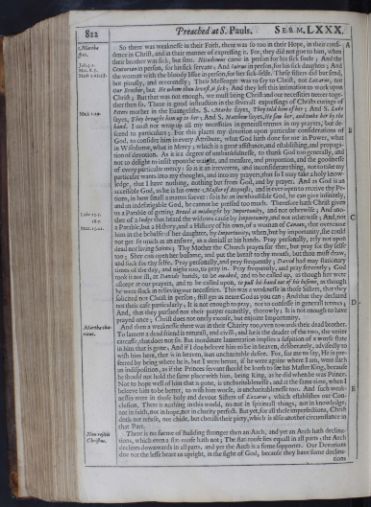 822
Preached at S. Pauls.
Serm. LXXX.
822
Preached at S. Pauls.
Serm. LXXX.
So there was weaknesse in their Faith, Marthæ
spes. there was so too in their Hope, in their confi-
dence in Christ, and in their manner of expressing it. For, they did not goe to him, when
their brother was sick, Joh. 3.1. but sent. Nicodemus came in person for his sick soule; And the
Centurion Mat. 8.5. in person, for his sick servant; And Iairus in person, for his sick daughter; And
the woman with the bloody Issue in person, for her sick-selfe. Mark 5.25, 33. These sisters did but send,
but piously, and reverendly; Their Messenger was to say to Christ, not Lazarus, not
Our Brother, but He whom thou lovest, is sick; And they left this intimation to work upon
Christ; But that was not enough, we must bring Christ and our necessities neerer toge-
ther then so. There is good instruction in the severall expressings of Christs curings of
Peters mother in the Euangelists.Mark 1.29. S. Marke sayes, They told him of her; And S. Luke
sayes, They brought him up to her; And S. Matthew sayes, He saw her, and tooke her by the
hand. I must not wrap up all my necessities in generall termes in my prayers, but de-
scend to particulars; For this places my devotion upon particular considerations of
God, to consider him in every Attribute, what God hath done for me in Power, what
in Wisedome, what in Mercy; which is a great assistance, and establishing, and propaga-
tion of devotion. As it is a degree of unthankfulnesse, to thank God too generally, and
not to delight to insist upon the waight, and measure, and proportion, and the goodnesse
of every particular mercy: so is it an irreverent, and inconsiderate thing, not to take my
particular wants into my thoughts, and into my prayers, that so I may take a holy know-
ledge, that I have nothing, nothing but from God, and by prayer. And as God is an
accessible God, as he is his owne Master of Requests, and is ever open to receive thy Pe-
tions, in how small a matter soever: so is he an inexhaustible God, he can give infinitely,
and an indefatigable God, he cannot be pressed too much. Therefore hath Christ given
us a Parable of getting Bread at midnight by Importunity, Luke 11.5. and not otherwise; And ano-
ther of a Iudge that heard the widows cause by Importunity, and not otherwise; 18.7. And, not
a Parable, Matt. 15.21. but a History, and a History of his own, of a woman of Canaan, that overcame
him in the behalfe of her daughter, by Importunity; when, but by importunity, she could
not get so much as an answer, as a deniall at his hands. Pray personally, rely not upon
dead nor living Saints; Thy Mother the Church prayes for thee, but pray for thy selfe
too; Shee can open her bosome, and put the breast to thy mouth, but thou must draw,
and suck for thy selfe. Pray personally, and pray frequently; David had may stationary
times of the day, and night too, to pray in. Pray frequently, and pray fervently; God
took it not ill, at Davids hands, to be awaked, and to be called up, as though hee were
asleepe at our prayers, and to be called upon, to pull his hand out of his bosome, as though
he were slack in relieving our necessities. This was a weaknesse in those Sisters, that they
solicited not Christ in person; still get as neare God as you can; And that they declared
not their case particularly; It is not enough to pray, nor to confesse in generall termes;
And, that they pursued not their prayer earnestly, thorowly; It is not enough to have
prayed once; Christ does not onely excuse, but enjoine Importunity.
And then a weaknesse there was in their Charity too, Marthæ cha-
ritas. even towards their dead brother.
To lament a dead friend is naturall, and civill; and he is the deader of the two, the verier
carcasse, that does not so. But inordinate lamentation implies a suspition of a worse state
in him that is gone; And if I doe beleeve him to be in heaven, deliberately, advisedly to
wish him here, that is in heaven, is an uncharitable desire. For, for me to say, He is pre-
ferred by being where he is, but I were better, if he were againe where I am, were such
an indispofition, as if the Princes servant should be loath to see his Master King, because
he should not hold the same place with him, being King, as he did when he was Prince.
Not to hope well of him that is gone, is uncharitablenesse; and at the same time, when I
beleeve him to be better, to wish him worse, is uncharitablenesse too. And such weak-
nesses were in those holy and devout Sisters of Lazarus; which establishes our Con-
clusion, There is nothing in this world, no not in spirituall things, not in knowledge,
not in faith, not in hope, not in charity perfect. But yet, for all these imperfections, Christ
doth not refuse, nor chide, but cherish their piety, which is also another circumstance in
that Part.
There is no forme of Building stronger then an Arch, Non rejicit
Christus. and yet an Arch hath declina-
tions, which even a flat-roofe hath not; The flat-roofe lies equall in all parts; the Arch
declines downwards in all parts, and yet the Arch is a firme supporter. Our Devotions
doe not the lesse beare us upright, in the sight of God, because they have some declina-
tions
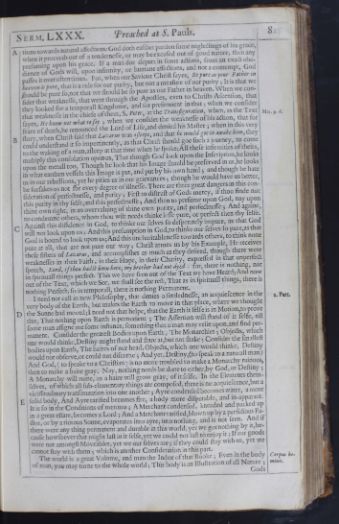 Serm. LXXX.
Preached at S. Pauls.
823
tions towards natural affections: God doth easilier pardon some neglectings of his grace,
Serm. LXXX.
Preached at S. Pauls.
823
tions towards natural affections: God doth easilier pardon some neglectings of his grace,
when it proceeds out of a tendernesse, or may be excused out of good nature, then any
presuming upon his grace. If a man doe depart in some actions, from an exact obe-
dience of Gods will, upon infirmity, or humane affections, and not a contempt, God
passes it over often times. For, when our Saviour Christ sayes, Be pure as your Father in
heaven is pure, that is a rule for our purity, but not a measure of our purity; It is that we
should be pure so, not that we should be so pure as our Father in heaven. When we con-
sider that weaknesse, that went through the Apostles, even to Christs Ascension, that
they looked for a temporall Kingdome, and for preferment in that; when we consider
that weaknesse in the chiefe of them, S. Peter, at the Transfiguration, when, Mar. 9.6. as the Text
sayes, He knew not what to say; when we consider the weaknesse of his action, that for
feare of death, he renounced the Lord of Life, and denied his Master; when in this very
story, when Christ said that Lazarus was asleepe, and that he would goe to awake him, they
could understand it so impertinently, as that Christ should goe such a journey, to come
to the waking of a man, asleep at that time when he spoke; All these infirmities of theirs,
multiply this consolation upon us, That though God look upon the Inscription, he looks
upon the metall too, Though he look that his Image should be preserved in us, he looks
in what earthen vessels this Image is put, and put by his own hand; and though he hate
us in our rebellions, yet he pities us in our grievances; though he would have us better,
he forsakes us not for every degree of illnesse. There are three great dangers in this con-
sideration of perfectnesse, and purity; First to distrust of Gods mercy, if thou finde not
this purity in thy selfe, and this perfectnesse; And then to presume upon God, nay upon
thine own right, in an overvaluing of thine own purity, and perfectnesse; And againe,
to condemne others, whom thou wilt needs thinke lesse pure, or perfect then thy selfe.
Against this diffidence in God, to thinke our selves so desperately impure, as that God
will not look upon us; And this presumption in God, to thinke our selves so pure, as that
God is bound to look upon us; And this uncharitablenesse towards others, to think none
pure at all, that are not pure our way; Christ armes us by his Example, He receives
these sisters of Lazarus, and accomplishes as much as they desired, though there were
weaknesses in their Faith, in their Hope, in their Charity, expressed in that unperfect
speech, Lord, if thou hadst been here, my brother had not dyed: for, there is nothing, not
in spirituall things perfect. This we have seen out of the Text we have Heard; And now
out of the Text, which we See, we shall see the rest, That as in spirituall things, there is
nothing Perfect, so in temporall, there is nothing Permanent.
I need not call in new Philosophy, that denies a settlednesse, 2. Part. an acquiescence in the
very body of the Earth, but makes the Earth to move in that place, where we thought
the Sunne had moved; I need not that helpe, that the Earth it selfe is in Motion, to prove
this, That nothing upon Earth is permanent; The Assertion will stand of it selfe, till
some man assigne me some instance, something that a man may relie upon, and find per-
manent. Consider the greatest Bodies upon Earth, The Monarchies; Objects, which
one would thinke, Destiny might stand and stare at, but not shake; Consider the smallest
bodies upon Earth, The haires of our head, Objects, which one would thinke, Destiny
would not observe, or could not discerne; And yet, Destiny, (to speak to a naturall man)
And God, (to speake to a Christian) is no more troubled to make a Monarchy ruinous,
then to make a haire gray. Nay, nothing needs be done to either, by God, or Destiny;
A Monarchy will ruine, as a haire will grow gray, of it selfe. In the Elements them-
selves, of which all sub-elementary things are composed, there is no acquiescence, but a
vicissitudinary transmutation into one another; Ayre condensed becomes water, a more
solid body, And Ayre rarified becomes fire, a body more disputable, and in-apparant.
It is so in the Conditions of men too; A Merchant condensed, kneaded and packed up
in a great estate, becomes a Lord; And a Merchant rarified, blown up by a perfidious Fa-
ctor, or by a riotous Sonne, evaporates into ayre, into nothing, and is not seen. And if
there were any thing permanent and durable in this world, yet we got nothing by it, be-
cause howsoever that might last in it selfe, yet we could not last to enjoy it; If our goods
were not amongst Moveables, yet we our selves are; if they could stay with us, yet we
cannot stay with them; which is another Consideration in this part.
The world is a great Volume, and man the Index of that Booke;Corpus ho-
minis. Even in the body
of man, you may turne to the whole world; This body is an Illustration of all Nature; Gods
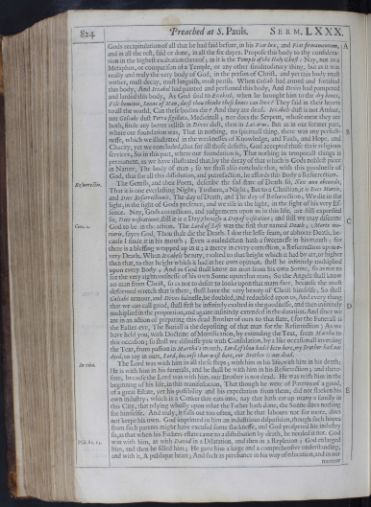 824
Preached at S. Pauls.
Serm. LXXX.
Gods recapitulation of all that he had said before, in his Fiat lux, and Fiat firmamentum,
824
Preached at S. Pauls.
Serm. LXXX.
Gods recapitulation of all that he had said before, in his Fiat lux, and Fiat firmamentum,
and in all the rest, said or done, in all the six dayes. Propose this body to thy considera-
tion in the highest exaltation thereof; as it is the Temple of the Holy Ghost: Nay, not in a
Metaphor, or comparison of a Temple, or any other similitudinary thing, but as it was
really and truly the very body of God, in the person of Christ, and yet this body must
wither, must decay, must languish, must perish. When Goliah had armed and fortified
this body, And Iezabel had painted and perfumed this body, And Dives had pampered
and larded this body, As God said to Ezekiel, when he brought him to the dry bones,
Fili hominis, Sonne of Man, doest thou thinke these bones can live? They said in their hearts
to all the world, Can these bodies die? And they are dead. Iezabels dust is not Ambar,
nor Goliahs dust Terra sigillata, Medicinall; nor does the Serpent, whose meat they are
both, finde any better rellish in Dives dust, then in Lazarus. But as in our former part,
where our foundation was, That in nothing, no spirituall thing, there was any perfect-
nesse, which we illustrated in the weaknesses of Knowledge, and Faith, and Hope, and
Charity, yet we concluded, that for all those defects, God accepted those their religious
services; So in this part, where our foundation is, That nothing in temporall things is
permanent, as we have illustrated that, by the decay of that which is Gods noblest piece
in Nature, The body of man; so we shall also conclude that, with this goodnesse of
God, that for all this dissolution, and putrefaction, he affords this Body a Resurrection.
The Gentils, Resurrectio. and their Poets, describe the sad state of Death so, Nox una obeunda,
That it is one everlasting Night; To them, a Night; But to a Christian, it is Dies Mortis,
and Dies Resurrectionis, The day of Death, and The day of Resurrection; We die in the
light, in the sight of Gods presence, and we rise in the light, in the sight of his very Es-
sence. Nay, Gods corrections, and judgements upon us in this life, are still expressed
so, Dies visitationis, still it is a Day, though a Day of visitation; and still we may discerne
God to be in the action.Gen. 2. The Lord of Life was the first that named Death; Morte mo-
rieris, sayes God, Thou shalt die the Death. I doe the lesse feare, or abhorre Death, be-
cause I finde it in his mouth; Even a malediction hath a sweetnesse in his mouth; for
there is a blessing wrapped up in it; a mercy in every correction, a Resurrection upon e-
very Death. When Iezabels beauty, exalted to that height which it had by art, or higher
then that, to that height which it had in her own opinion, shall be infinitely multiplied
upon every Body; And as God shall know no man from his own Sonne, so as not to
see the very righteousnesse of his own Sonne upon that man; So the Angels shall know
no man from Christ, so as not to desire to looke upon that mans face, because the most
deformed wretch that is there, shall have the very beauty of Christ himselfe; So shall
Goliahs armour, and Dives fulnesse, be doubled, and redoubled upon us, And every thing
that we can call good, shall first be infinitely exalted in the goodnesse, and then infinitely
multiplied in the proportion, and againe infinitely extended in the duration. And since we
are in an action of preparing this dead Brother of ours to that state, (for the Funerall is
the Easter-eve, The Buriall is the depositing of that man for the Resurrection) As we
have held you, with Doctrine of Mortification, by extending the Text, from Martha to
this occasion; so shall we dismisse you with Consolation, by a like occasionall inverting
the Text, from passion in Martha's mouth, Lord, if thou hadst been here, my Brother had not
dyed, to joy in ours, Lord, because thou wast here, our Brother is not dead.
The Lord was with him in all these steps;In vita. with him in his life; with him in his death;
He is with him in his funerals, and he shall be with him in his Resurrection; and there-
fore, because the Lord was with him, our Brother is not dead. He was with him in the
beginning of his life, in this manifestation, That though he were of Parents of a good,
of a great Estate, yet his possibility and his expectation from them, did not slacken his
own industry; which is a Canker that eats into, nay that hath eat up many a family in
this City, that relying wholly upon what the Father hath done, the Sonne does nothing
for himselfe. And truly, it falls out too often, that he that labours not for more, does
not keepe his own. God imprinted in him an industrious disposition, though such hopes
from such parents might have excused some slacknesse, and God prospered his industry
so, as that when his Fathers estate came to a distribution by death, he needed it not. God
was with him, Psal. 81.11. as with David in a Dilatation, and then in a Repletion; God enlarged
him, and then he filled him; He gave him a large and a comprehensive understanding,
and with it, A publique heart; And such as perchance in his way of education, and in our narrow
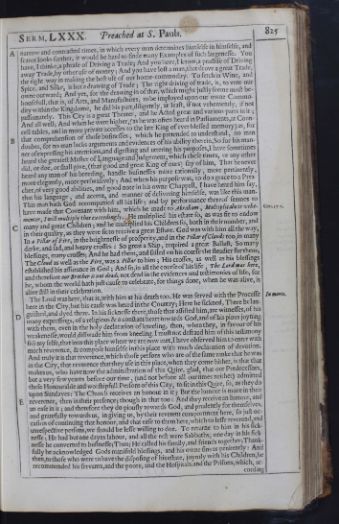 Serm. LXXX.
Preached at S. Pauls.
825
narrow and contracted times, in which every man determines himselfe in himselfe, and
Serm. LXXX.
Preached at S. Pauls.
825
narrow and contracted times, in which every man determines himselfe in himselfe, and
scarce looks farther, it would be hard to finde many Examples of such largenesse. You
have, I thinke, a phrase of Driving a Trade; And you have, I know, a practise of Driving
away Trade, by other use of money; And you have lost a man, that drove a great Trade,
the right way in making the best use of our home-commodity. To fetch in Wine, and
Spice, and Silke, is but a drawing of Trade; The right driving of trade, is, to vent our
owne outward; And yet, for the drawing in of that, which might justly seeme most be-
hoofefull, that is, of Arts, and Manufactures, to be imployed upon our owne Commo-
dity within the Kingdome, he did his part, diligently, at least, if not vehemently, if not
passionately. This City is a great Theater, and he Acted great and various parts in it;
And all well; And when he went higher, (as he was often heard in Parliaments, at Coun-
cell tables, and in more private accesses to the late King of ever blessed memory) as, for
that comprehension of those businesses, which he pretended to understand, no man
doubts, for no man lacks arguments and evidences of his ability therein, So for his man-
ner of expressing his intentions, and digesting and uttering his purposes, I have sometimes
heard the greatest Master of Language and Judgement, which these times, or any other
did, or doe, or shall give, (that good and great King of ours) say of him, That he never
heard any man of his breeding, handle businesses more rationally, more pertinently,
more elegantly, more perswasively; And when his purpose was, to do a grace to a Prea-
cher, of very good abilities, and good note in his owne Chappell, I have heard him say,
that his language, and accent, and manner of delivering himselfe, was like this man.
This man hath God accompanied all his life; and by performance thereof seemes to
have made that Covenant with him, Gen. 17.2. which he made to Abraham, Multiplicabote vehe-
menter, I will multiply thee exceedingly. He multiplied his estate so, as was fit to endow
many and great Children; and he multiplied his Children so, both in their number, and
in their quality, as they were fit to receive a great Estate. God was with him all the way,
In a Pillar of Fire, in the brightnesse of prosperity, and in the Pillar of Clouds too, in many
darke, and sad, and heavy crosses: So great a Ship, required a great Ballast, So many
blessings, many crosses; And he had them, and sailed on his course the steadier for them;
The Cloud as well as the Fire, was a Pillar to him; His crosses, as well as his blessings
established his assurance in God; And so, in all the course of his life, The Lord was here,
and therefore our Brother is not dead; not dead in the evidences and testimonies of life; for
he, whom the world hath just cause to celebrate, for things done, when he was alive, is
alive still in their celebration.
The Lord was here, that is, with him at his death too.In morte. He was served with the Processe
here in the City, but his cause was heard in the Country; Here he sickned, There he lan-
guished, and dyed there. In his sicknesse there, those that assisted him, are witnesses, of his
many expressings, of a religious & a constant heart towards God, and of his pious joyning
with them, even in the holy declaration of kneeling, then, when they, in favour of his
weakenesse, would disswade him from kneeling. I must not defraud him of this testimony
frō my selfe, that into this place where we are now met, I have observed him to enter with
much reverence, & compose himselfe in this place with much declaration of devotion.
And truly it is that reverence, which those persons who are of the same ranke that he was
in the City, that reverence that they use in this place, when they come hither, is that that
makes us, who have now the administration of this Quire, glad, that our Predecessors,
but a very few yeares before our time, (and not before all our times neither) admitted
these Honourable and worshipfull Persons of this City, to sit in this Quire, so, as they do
upon Sundayes: The Church receives an honour in it; But the honour is more in their
reverence, then in their presence; though in that too: And they receive an honour, and
an ease in it; and therefore they do piously towards God, and prudently for themselves,
and gratefully towards us, in giving us, by their reverent comportment here, so just oc-
casion of continuing that honour, and that ease to them here, which to lesse reverend, and
unrespective persons, we should be lesse willing to doe. To returne to him in his sick-
nesse; He had but one dayes labour, and all the rest were Sabbaths, one day in his sick-
nesse he converted to businesse; Thus; He called his family, and friends together; Thank-
fully he acknowledged Gods manifold blessings, and his owne sins as penitently: And
then, to those who were to have the disposing of his estate, joyntly with his Children, he
recommended his servants, and the poore, and the Hospitals, and the Prisons, which, ac-
cording
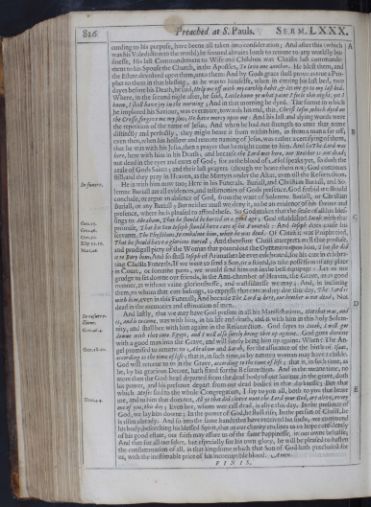 826
Preached at S. Pauls.
Serm. LXXX.
cording to his purpose, have beene all taken into consideration; And after this (which
826
Preached at S. Pauls.
Serm. LXXX.
cording to his purpose, have beene all taken into consideration; And after this (which
was his Valediction to the world) he seemed alwaies loath to returne to any worldly bu-
sinesse, His last Commandement to Wife and Children was Christs last commande-
ment to his Spouse the Church, in the Apostles, To love one another. He blest them, and
the Estate devolved upon them, unto them: And by Gods grace shall prove as true a Pro-
phet to them in that blessing, as he was to himselfe, when in entring his last bed, two
dayes before his Death, he said, Help me off with my earthly habit, & let me go to my last bed.
Where, in the second night after, he said, Little know ye what paine I feele this night, yet I
know, I shall have joy in the morning; And in that morning he dyed. The forme in which
he implored his Saviour, was evermore, towards his end, this, Christ Iesus, which dyed on
the Crosse, forgive me my sins; He have mercy upon me: And his last and dying words were
the repetition of the name of Jesus; And when he had not strength to utter that name
distinctly and perfectly, they might heare it from within him, as from a man a far off;
even then, when his hollow and remote naming of Jesus, was rather a certifying of them,
that he was with his Jesus, then a prayer that he might come to him. And so The Lord was
here, here with him in his Death; and because the Lord was here, our Brother is not dead;
not dead in the eyes and eares of God; for as the blood of Abel speaks yet, so doth the
zeale of Gods Saints; and their last prayers (though we heare them not) God continues
still; and they pray in Heaven, as the Martyrs under the Altar, even till the Resurrection.
He is with him now too;In funere. Here in his Funerals. Buriall, and Christian Buriall, and So-
lemne Buriall are all evidences, and testimonies of Gods presence. God forbid we should
conclude, or argue an absence of God, from the want of Solemne Buriall, or Christian
Buriall, or any Buriall; But neither must we deny it, to be an evidence of his favour and
presence, where he is pleased to afford these. So God makes that the seale of all his bles-
sings to Abraham,Gen. 15. That he should be buried in a good age; God established Iacob with that
promise, Gen. 46. That his Son Ioseph should have care of his Funerals: And Ioseph does cause his
servants, Gen. 50. The Physitians, to embalme him, when he was dead. Of Christ it was Prophecied,
That he should have a glorious Buriall; Esay 11.10. And therefore Christ interprets well that profuse,
and prodigall piety of the Woman that poured out the Oyntment upon him, Matt. 26. That she did
it to Bury him; And so shall Ioseph of Arimathea be ever celebrated, for his care in celebra-
ting Christs Funerals. If we were to send a Son, or a friend, to take possession of any place
in Court, or forraine parts, we would send him out in the best equipage: Let us not
grudge to set downe our friends, in the Anti-chamber of Heaven, the Grave, in as good
manner, as without vaine-gloriousnesse, and wastfulnesse we may; And, in inclining
them, to whom that care belongs, to expresse that care as they doe this day, The Lord is
with him, even in this Funerall; And because The Lord is here, our brother is not dead; Not
dead in the memories and estimation of men.
And lastly, In resurre-
ctione. that we may have God present in all his Manifestations, Hee that was, and
is, and is to come, was with him, in his life and death, and is with him in this holy Solem-
nity, and shall bee with him againe in the Resurrection.Gen. 46.4. God sayes to Iacob, I will goe
downe with thee into Egypt, and I will also surely bring thee up againe. God goes downe
with a good man into the Grave, and will surely bring him up againe. When? The An-
gel promised to returne to Abraham and Sarah, Gen. 18.10. for the assurance of the birth of Isaac,
according to the time of life; that is, in such time, as by nature a woman may have a childe.
God will returne to us in the Grave, according to the time of life; that is, in such time, as
he, by his gracious Decree, hath fixed for the Resurrection. And in the meane time, no
more then the God-head departed from the dead body of our Saviour, in the grave, doth
his power, and his presence depart from our dead bodies in that darknesse; But that
which Moses said to the whole Congregation, I say to you all, both to you that heare
me, Deut. 4.4. and to him that does not, All ye that did cleave unto the Lord your God, are alive, every
one of you, this day; Even hee, whom wee call dead, is alive this day. In the presence of
God, we lay him downe; In the power of God, he shall rise; In the person of Christ, he
is risen already. And so into the same hands that have received his soule, we commend
his body; beseeching his blessed Spirit, that as our charity enclines us to hope confidently
of his good estate, our faith may assure us of the same happinesse, in our owne behalfe;
And that for all our sakes, but especially for his own glory, he will be pleased to hasten
the consummation of all, in that kingdome which that Son of God hath purchased for
us, with the inestimable price of his incorruptible blood. Amen.
FINIS.
Errata.
| Pag. | line | reade |
| 22 | 39 | waives |
| 22 | 40 | waives |
| 22 | 50 | waives |
| 110 | 52 | when he |
| 116 | 40 | may come |
| 142 | 31 | the Cato's |
| 164 | 3929 | Manours |
| 196 | 15 | in indignifying |
| 420 | 32 | man |
| 426 | 45 | blown |
| 534535 | 3525 | Topicks |
| 710 | 46 | exorcised |
| 751 | 43 | or any people |
| 782 | 6339 | Interimists. |
In the life.
Pag. 1513 line 12 for merit, reade mercy
Pag. 163. line 40. for friends, reade friend.